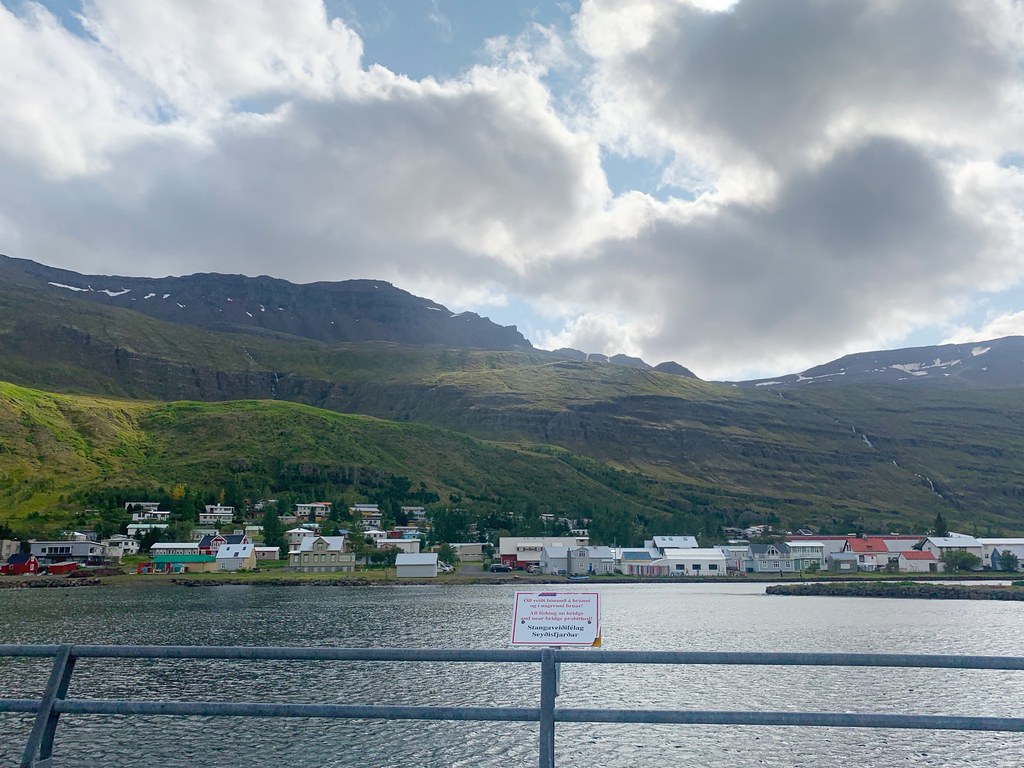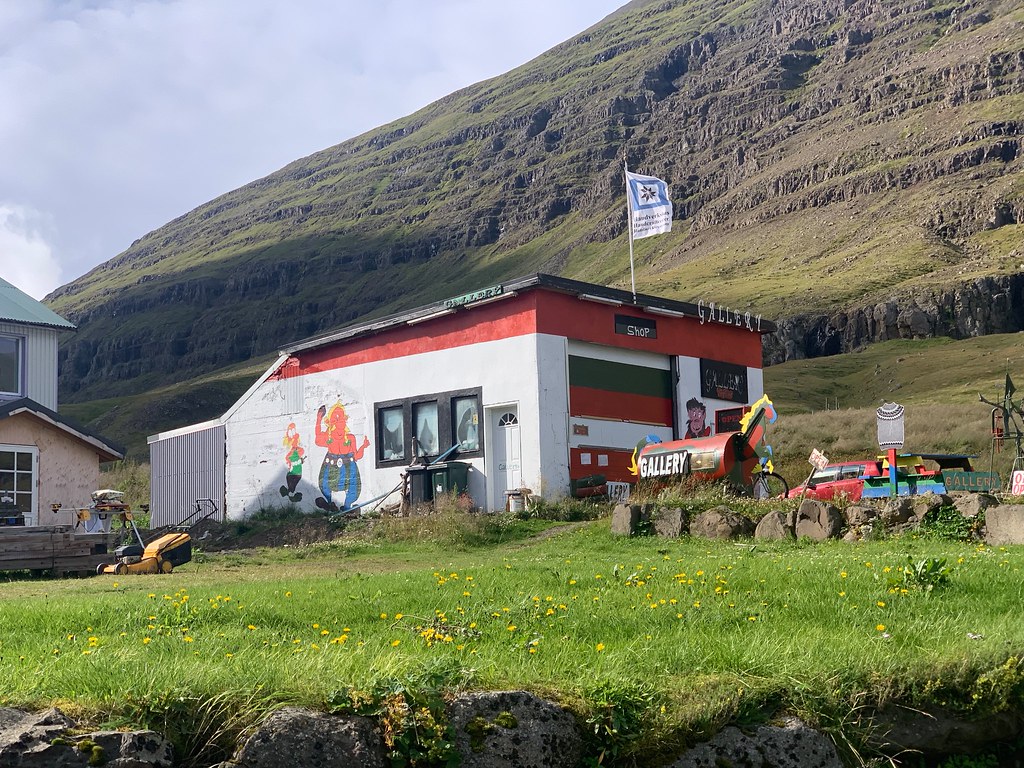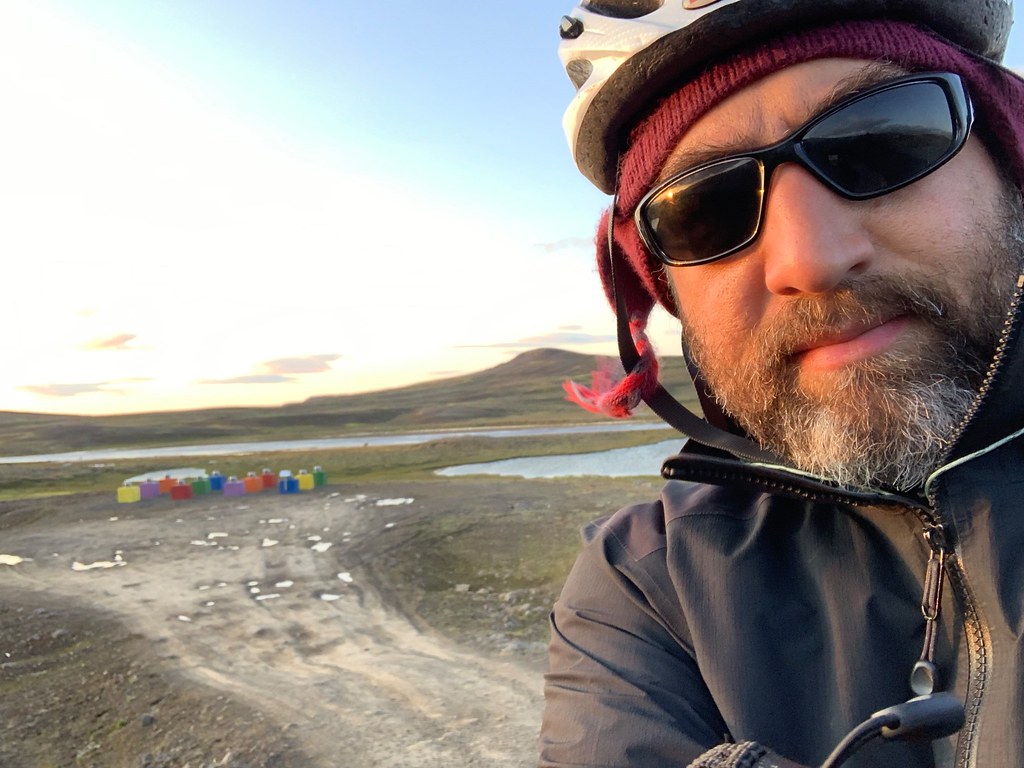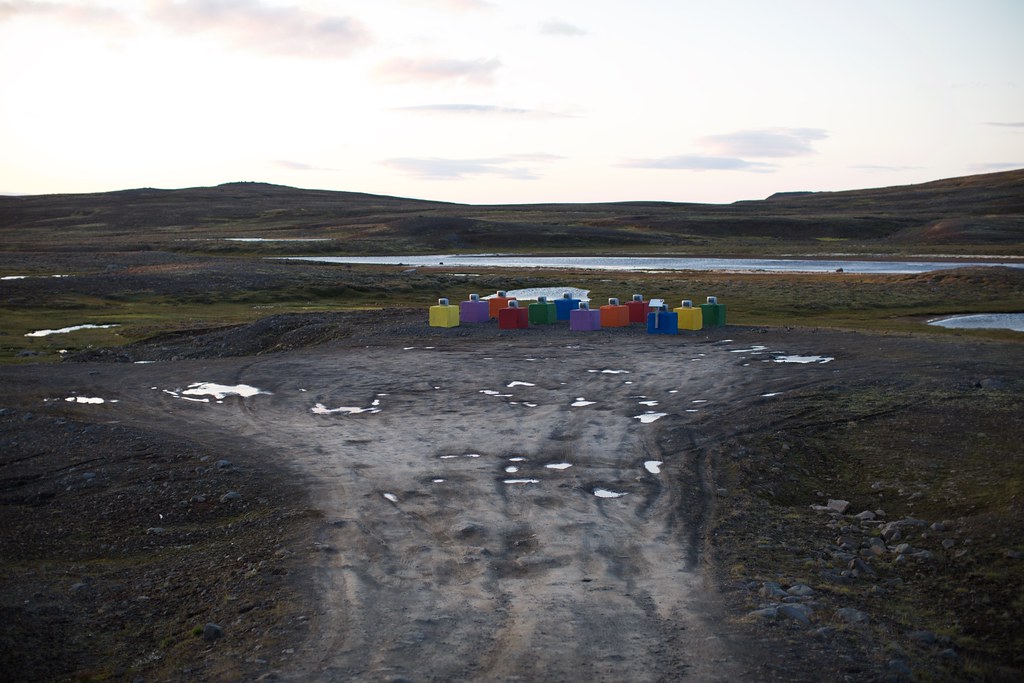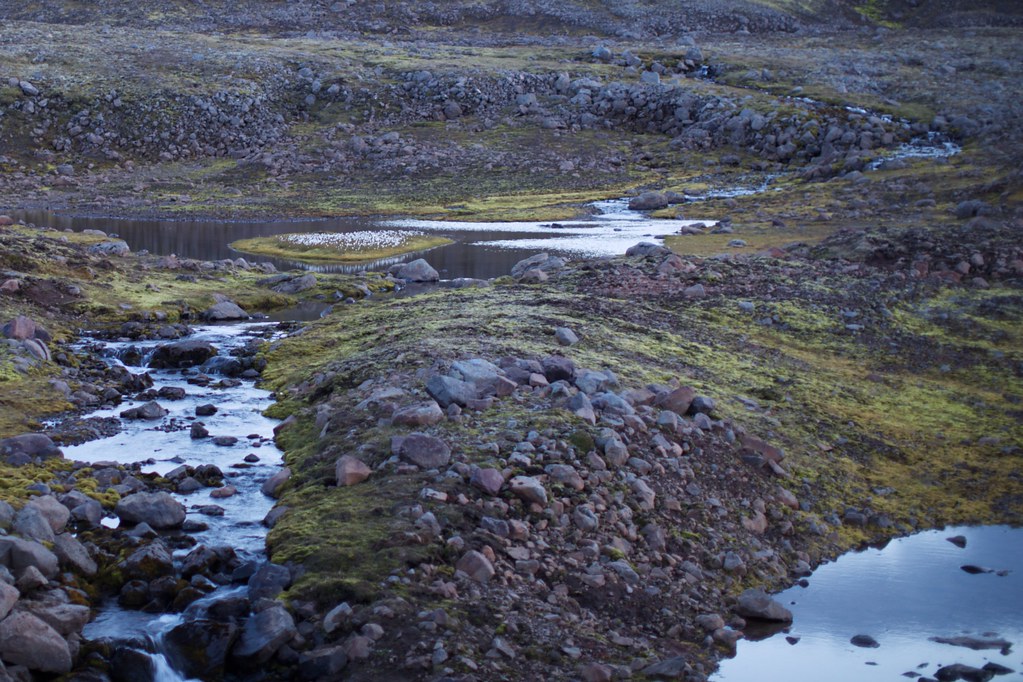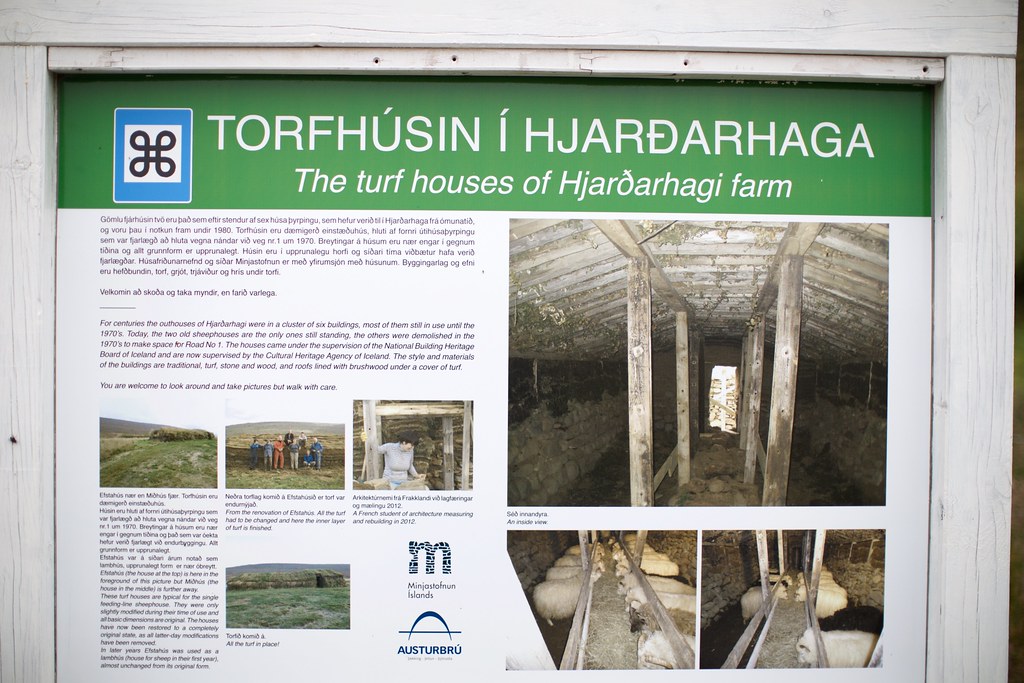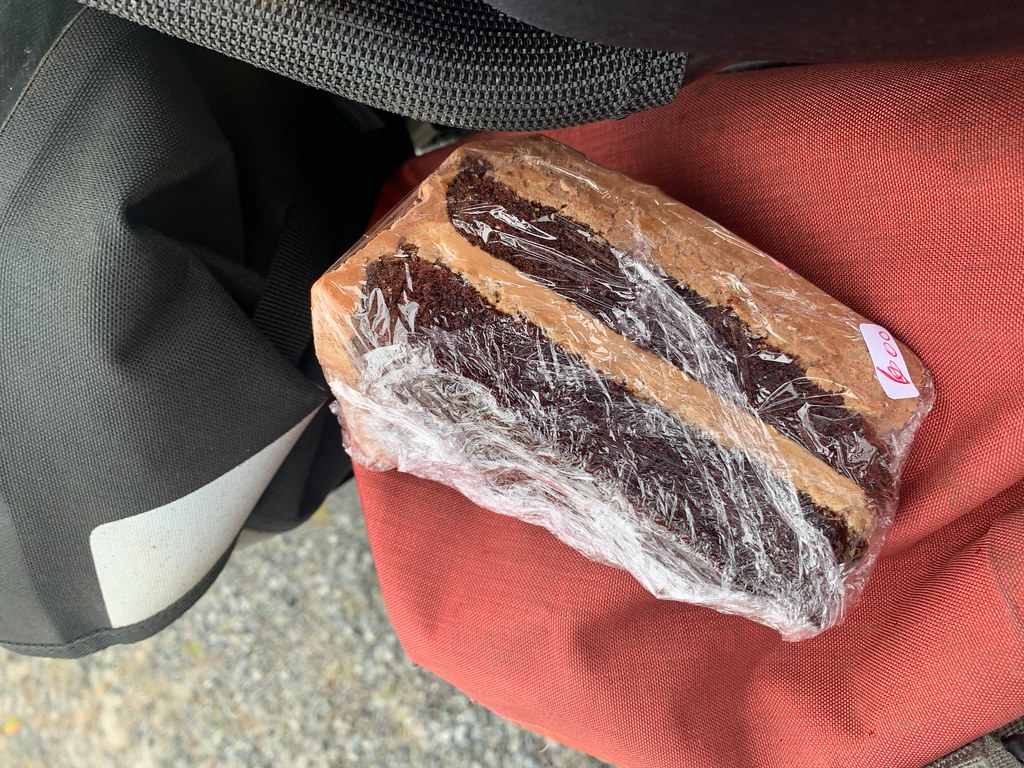Up and on the road relatively late, after lingering in the hotel to eat a good breakfast. While I was chowing down at a small table in the corner of the restaurant, a noisy crowd of Chinese tourists poured in, bookended by two tour guides. They pushed a bunch of tables together and half a dozen waiters came in to take orders, then the tour leaders got into a loud argument in Chinese with each other while looking at the menus. It sounded really vicious, as though they were an old married couple fighting over money.
I was glad to be out of there and back to the peace and quiet of the road.
Just around the corner I encountered a friendly dog and a little mom-and-pop ice cream store. I was still full but — home made ice cream? Un-pass-up-able.
I then spent the rest of the morning and early afternoon riding around the shore of Lake Mývatn, pausing to take pictures, or just to stand there letting the gorgeous rustic landscape soak into my eyeballs.
Later on I stopped in a clearing by the side of the road to eat snacks. Lunch and dinner for me today would be a split between fresh fish and candy. Gotta keep those legs turning! While I was off the bike I also attended a video conference call with work. From Iceland, I chatted with a small gang of developers situated in Ukraine, Belgium, Spain, and California.
Modern technology is astounding. Ten years ago this would have been cutting edge stuff. Twenty years ago this would have been impossible. Before that — science fiction. Now it’s just a regular Friday.
As I rode away from the lake, I passed by well-used buildings and lumpy roads belonging to different farmsteads. I could easily imagine some local family of Icelanders spending their days tending sheep and horses, mending fences and cutting grass, then taking the occasional drive into “the big city” to replenish their supplies participate in some modern cultural event, like a conference or a show. I thought about the bottlenecks of shipping and manufacturing — where do they get their electronics? Where do they get their cars and trucks? How do they pay for it all? I can’t think of anything they might export aside from horses and fish. What’s the secret of Icelandic financing that keeps this nation so well provisioned? Is it just a fiscally conservative culture and a lack of nearby enemies?
Also of course there’s the enormous economic advantage of getting free purified hot water and electricity out of the ground…
I pondered for a while as I rode up the hills to the east of the lake. Was I seeing this place clearly? Just how impressed should I be with the affluence of Iceland?
On a different cycling trip I rode through vast, barely populated stretches of the American midwest. The impression I got was of mostly good people doing tough agrarian work, with strong social and religious bonds, but also a subset of people struggling with substance abuse and poverty. The best example of that region is arguably Kansas, a place with eight times the population of Iceland spread across an area of land only twice the size. The median per-capita income of Iceland is roughly $40,000 with an income tax rate of 45%, while the median per-capita income of Kansas is roughly $30,000 with an income tax (state combined with federal) of about 23%. There is probably some skew happening there with currency conversion rates, but to be honest, those numbers are closer than I would have guessed. Americans living on the coast generally think of Kansas as a poor backwater with nothing but crops, cattle, and various Christian groups vying for parishioners — suited more for flying over than for living in. But a direct comparison with what those same Americans think of as the finest of the first-world Nordic economies, they’re doing okay.
Obviously not great, but okay. The income comparison is only part of the picture. Icelanders have engineered their government to provide a lot more support than people in Kansas receive, for example universal health care. Does that difference bear out in life expectancy? The internet tells me that Icelanders can expect to live 82 years, versus 77 years for people in Kansas. Again, not as huge a difference as I was expecting. I pulled up a bunch of numbers, swapping around in browser tabs on my phone. The only thing that seemed hugely different was the violent crime rate. (The murder rate in Iceland is essentially zero.) What’s going on? Am I letting the gorgeous terrain of this country bias my judgement?
The attitude that I’ve run with ever since I can remember – the prevailing attitude of my social group – is that if only places like Kansas would adopt the government and economic policies of the Nordic countries, their citizens would enjoy a much higher standard of living and a huge boost to social stability and equity. When I was younger, and more firmly embedded in my liberal social group, I actually believed the Nordic countries all had straight-up socialist governments and economic systems, and that the world should be pursuing those. It turns out the model they’re using is not so different from the United States. I still believe that the US can – and should – adopt more welfare programs and be way less antagonistic towards unions and agencies designed to preserve renewable resources, but I’m surprised to find that there isn’t more difference between places like Iceland and Kansas. Iceland may be doing better than Kansas mostly for reasons that have little to do with government, like the presence of tourist attractions, drastically low utility costs, war-time investment from foreign powers, and the fisheries that ring the island. Compare that with Kansas: Nobody goes “on vacation” to Kansas, heating and cooling are expensive there, and it’s smack-in-the-middle of “torando alley“.
I think I do have some subconscious bias towards Iceland and the other countries of Northern Europe. I think there’s a part of me that feels like, the more attractive the landscape is, and the more attractive to me the people living on it are, the more likely they are to be doing things right, and worth emulating. And it doesn’t take more than a second to realize what a silly and potentially dangerous belief that is. If I was the owner of a company or the gatekeeper for some social program, and had to choose whether to do business with Icelanders or some other group, I would want to keep it in mind. I’d feel ashamed if I didn’t.
As an American I hold the concept of equal opportunity close to the front of my mind, and have an almost stern attitude about seeing it applied everywhere I go. There’s a lot America does wrong, but equal opportunity across ethnic and cultural lines, that’s something we do better than anywhere else. As I travel through other countries that haven’t had to adapt to such diversity – yet – I find myself wondering how much of their own subconscious bias would come boiling up if you scratched the surface of their everyday business and finance. 50 years ago Icelanders gladly accepted money and hardware from Americans but balked at their children mixing socially, and the military servicemen they were dealing with probably looked a lot like them. I wonder how the current generation of Icelanders will cope with an avalanche of tourists from China, India, Brazil, and so on. I’m sure they’ll happily take the money — but how much relief will they feel when the foreigners all bugger off back out of the country in late August?
(This problem is still mostly hypothetical for Iceland. About 1/4th of all the tourists to Iceland still come from the United States, and almost all the rest come from Europe. Only 4 percent come from China. The rest are a rounding error.)
I set my deep thoughts aside and switched over to my Terry Pratchett book, and as the miles ticked away the day slowly shaded into a multi-layered twilight. The clouds were very moody and I had to set up the tripod and take a few long exposures to try and capture it:
I crossed a long narrow bridge, then left Highway 1 for a smaller road. It was quite late by the time I found Grimsstadir campsite, and I had to stomp around on the grass in the near-dark and poke the ground with my feet to locate a dry spot for the tent. As I rummaged in my bags, I once again worried that some other camper would come stumbling out of their car or tent, awakened by the noise and paranoid that a thief was messing with their gear — but it never happened. People are just more relaxed here, I guess.
These late night rides are inspiring and cozy, but they make setting up camp twice as hard. Still worth it though!
{"lat":[65.567161825,65.567162328,65.567163837,65.567164172,65.567165597,65.567166771,65.56716786,65.567169034,65.567168782,65.567173141,65.56717926,65.567187306,65.567190324,65.567188815,65.567183451,65.567178924,65.567174398,65.56716895,65.5671661,65.567163083,65.567160317,65.567161071,65.567163502,65.567165765,65.567166352,65.567167441,65.567167776,65.567167776,65.567165849,65.567164005,65.567162496,65.567156629,65.567142212,65.567122179,65.567103906,65.567086891,65.567068032,65.567054453,65.567046406,65.567041796,65.567039869,65.567041042,65.567042383,65.567039785,65.567039617,65.56704406,65.567042467,65.567041964,65.567044562,65.567049759,65.567053363,65.567056968,65.567058309,65.567061159,65.567064763,65.567070211,65.567077503,65.567087897,65.567099548,65.567110696,65.567123855,65.567136931,65.567149336,65.567161071,65.567171129,65.56718102,65.567190324,65.567196443,65.567196107,65.567193425,65.567186049,65.567176075,65.567164843,65.567155874,65.567145648,65.567134081,65.567124777,65.56711891,65.56711321,65.567108097,65.567101727,65.567097368,65.567094854,65.567093513,65.56709192,65.567089238,65.567089741,65.567092926,65.567094938,65.56709586,65.56709653,65.567098123,65.56709762,65.56709871,65.567099464,65.567100051,65.567102649,65.567104242,65.567105331,65.56710793,65.567108181,65.567109438,65.567112121,65.567115138,65.567117736,65.567118575,65.567118407,65.567117736,65.567116982,65.567115557,65.567114468,65.567112624,65.567112204,65.567111869,65.567110109,65.567109187,65.567109103,65.567109019,65.567109019,65.567108684,65.567108935,65.567109103,65.567109438,65.567108349,65.567109941,65.567111366,65.567113126,65.567113965,65.567114384,65.567114803,65.56711497,65.567115306,65.56711606,65.567116731,65.567117653,65.567118491,65.567119161,65.567119916,65.567120335,65.567120586,65.567120838,65.567121508,65.567121844,65.567122263,65.56712243,65.567122682,65.567122849,65.567123017,65.567123017,65.567122766,65.567122598,65.56712243,65.56712243,65.567122514,65.567122598,65.567122598,65.567122263,65.567122179,65.567121927,65.567121592,65.567121508,65.567121508,65.567121089,65.56712067,65.567120167,65.567119664,65.567118994,65.567118491,65.567117988,65.567117569,65.567116982,65.567116228,65.56711539,65.567114635,65.567114216,65.567113881,65.567113462,65.56711321,65.567112791,65.567112624,65.56711254,65.56711254,65.56711254,65.567112624,65.567112707,65.567112959,65.567113378,65.567113546,65.567113462,65.567113378,65.567113462,65.567113546,65.567113713,65.567113881,65.567114132,65.5671143,65.567114719,65.567115138,65.567115222,65.567115473,65.567116982,65.567118239,65.567118826,65.56711891,65.567118491,65.567118826,65.56711891,65.567119329,65.567119832,65.56712067,65.567121508,65.567123939,65.56713165,65.567133914,65.567135087,65.567134836,65.567134416,65.567138607,65.56714196,65.567144726,65.567142631,65.567140116,65.567137518,65.567136596,65.567135674,65.567134836,65.567134165,65.567130812,65.567127543,65.56712352,65.567122263,65.567121592,65.567121927,65.567121257,65.567120586,65.567120083,65.567120335,65.567120083,65.567120335,65.567120586,65.567120838,65.567120838,65.567120838,65.567120251,65.567120586,65.567120838,65.567121425,65.567122011,65.567121844,65.567122263,65.567122682,65.567123017,65.567123436,65.567123855,65.567124274,65.56712461,65.567124945,65.567125196,65.567125196,65.56712528,65.567125364,65.56712528,65.56712528,65.567125113,65.567125029,65.567124861,65.56712461,65.56712461,65.567124693,65.567124777,65.567124861,65.567125113,65.567125113,65.567125196,65.567125532,65.567126118,65.567126705,65.56712704,65.567127459,65.567127795,65.567127962,65.567127879,65.567128214,65.567128465,65.567128801,65.567129303,65.56712989,65.567130309,65.567130896,65.567131734,65.567132489,65.567133243,65.567133997,65.567134584,65.567135087,65.567135422,65.567135841,65.567136177,65.567136596,65.567136763,65.567137099,65.567137434,65.567137602,65.567137769,65.567137769,65.567137769,65.567137853,65.567137937,65.567138104,65.567138607,65.567139027,65.567139278,65.567139613,65.567139781,65.567139865,65.567140032,65.567140368,65.567140619,65.567140954,65.567141457,65.567141457,65.567141373,65.567140954,65.567140871,65.567140451,65.567140535,65.567140451,65.567139781,65.567139278,65.567138775,65.567138607,65.56713844,65.567137937,65.567137518,65.567137099,65.567136763,65.567136428,65.567135925,65.567135506,65.567135003,65.567134752,65.567134416,65.567133914,65.567133662,65.567133327,65.567133075,65.567132572,65.567132153,65.567131734,65.567131148,65.567130896,65.567130728,65.567130309,65.567129806,65.567129471,65.56712922,65.567129052,65.567128968,65.567129052,65.567129471,65.567129806,65.567130226,65.567130812,65.567131315,65.567131818,65.567132153,65.567132656,65.567132908,65.567133327,65.56713383,65.567134081,65.567134249,65.567134752,65.567135087,65.567136093,65.567136428,65.567136428,65.567136763,65.567137602,65.567138356,65.567139027,65.567139529,65.567140284,65.567141373,65.567142212,65.567142631,65.567142882,65.567142966,65.56714305,65.567143217,65.567143469,65.567143553,65.567143553,65.567143553,65.567143385,65.567143385,65.567143217,65.567142966,65.567142798,65.567142547,65.567142547,65.567142295,65.567142295,65.567141876,65.567141457,65.567140954,65.567140787,65.567140284,65.567139781,65.567139697,65.567139278,65.567138859,65.567138775,65.567138691,65.567138775,65.567138943,65.567139027,65.567139027,65.567139362,65.567139865,65.567140032,65.567140284,65.567140368,65.567139949,65.567139529,65.567138859,65.567138607,65.567138188,65.567137853,65.567137602,65.567137434,65.56713735,65.567137099,65.567137015,65.567136931,65.567136847,65.567136847,65.567137182,65.567137266,65.567137434,65.567137685,65.567137769,65.567137769,65.567137853,65.567137853,65.567137937,65.567138021,65.567138188,65.56713844,65.567138691,65.567138943,65.567139194,65.567139446,65.567139278,65.567139613,65.567139446,65.567139697,65.567139697,65.567139697,65.567139529,65.567139446,65.567139446,65.567139697,65.567139529,65.567139446,65.56713911,65.567138859,65.567138607,65.567138524,65.567138188,65.567137685,65.567137769,65.567137518,65.567137099,65.567136763,65.567136512,65.567136763,65.567136763,65.56713668,65.567137099,65.567137434,65.567137769,65.567137937,65.567138272,65.567138607,65.567138859,65.567139362,65.567139697,65.567139949,65.567140451,65.567140703,65.567140954,65.567141457,65.567141793,65.567142128,65.567142463,65.567142798,65.567143134,65.567143469,65.567143888,65.567144475,65.567145061,65.567145732,65.567146486,65.567147073,65.567147576,65.567148079,65.567148666,65.567149169,65.567149755,65.567150007,65.567150342,65.567150761,65.567151264,65.567151599,65.567152018,65.567152438,65.567152605,65.567152773,65.56715294,65.567152857,65.567152354,65.567152018,65.567151599,65.567151599,65.567151516,65.567150845,65.567150091,65.567149504,65.567148833,65.567148414,65.567147911,65.567147744,65.567147408,65.567147325,65.567147241,65.567147325,65.567147492,65.56714766,65.56714766,65.567147828,65.567147828,65.567147744,65.567147492,65.567147408,65.567147325,65.567147073,65.567146905,65.567147911,65.567149001,65.567148917,65.56715118,65.567152438,65.567156042,65.567161071,65.5671604,65.56715797,65.567153862,65.567149839,65.567147744,65.567145481,65.567143469,65.567139613,65.567138104,65.567137015,65.567135925,65.567135255,65.567134836,65.567134165,65.567133578,65.567133327,65.567132908,65.567132572,65.567132153,65.567131734,65.567131064,65.567130812,65.567130812,65.567130477,65.567127711,65.567123855,65.567120586,65.567115809,65.567110696,65.567106337,65.56710223,65.567098542,65.567095441,65.567093429,65.567090914,65.567088735,65.567086807,65.567084796,65.567082952,65.567081443,65.567082197,65.567085382,65.567087059,65.567087981,65.567089322,65.567091417,65.567092507,65.567092507,65.567092339,65.567091417,65.567090998,65.56709125,65.567090663,65.567090076,65.567089406,65.567089154,65.567088651,65.567088651,65.567088903,65.567088819,65.567088903,65.567088735,65.567088651,65.567088735,65.567088903,65.567088903,65.567089238,65.567089406,65.567089825,65.567089657,65.567089573,65.567089406,65.567089489,65.567089489,65.567089489,65.567089406,65.567089406,65.567089657,65.567089657,65.567089741,65.567090076,65.567090411,65.567090663,65.567090831,65.567090914,65.567091082,65.567091166,65.567090831,65.567090328,65.567090244,65.567090076,65.567089909,65.567089741,65.567089825,65.567091166,65.567096111,65.567103823,65.567114384,65.567128046,65.567145983,65.567170375,65.567199125,65.567231647,65.567264504,65.567295852,65.567323847,65.567349328,65.567374558,65.567397943,65.567420826,65.567442787,65.56746349,65.567483439,65.567502885,65.567521241,65.567540184,65.56755963,65.567578238,65.567595924,65.56761185,65.567626686,65.567639091,65.567648311,65.567655771,65.567662728,65.567667086,65.567667422,65.567662309,65.567655687,65.567649233,65.56764521,65.567640013,65.567630709,65.567618974,65.567609838,65.567602713,65.567594667,65.567588213,65.567582513,65.567577987,65.567571952,65.567564492,65.567556278,65.567548399,65.567540184,65.567531802,65.5675256,65.567520822,65.567516883,65.567514284,65.567511686,65.567505316,65.567498526,65.56749048,65.567484109,65.56747623,65.567468435,65.567462317,65.567456617,65.56745033,65.56744329,65.567436416,65.567428537,65.567418731,65.567407583,65.567396602,65.567386963,65.567376821,65.567364584,65.567351508,65.567338264,65.567324015,65.567309682,65.567295181,65.567280681,65.567266515,65.567252015,65.567236089,65.567219158,65.567201807,65.567184708,65.567169537,65.567155706,65.567142128,65.567129471,65.567118658,65.567109438,65.567099967,65.567089657,65.567078006,65.567065266,65.567051017,65.567038695,65.567028721,65.567019668,65.567012292,65.56700676,65.567002653,65.566997289,65.566992259,65.566986392,65.566980022,65.566974993,65.56697164,65.566967952,65.566963007,65.566958229,65.566952278,65.566946243,65.566942052,65.566938783,65.566935849,65.566929647,65.566921935,65.566914056,65.566906764,65.566899723,65.566892347,65.566886564,65.566883211,65.566879355,65.566874661,65.566870973,65.566869297,65.566865944,65.566860412,65.566852617,65.566845241,65.566839625,65.566836188,65.566833674,65.566832081,65.566829902,65.566823867,65.566817497,65.5668123,65.56680836,65.566804253,65.566800062,65.566794027,65.566787657,65.566780868,65.56677324,65.566766116,65.5667605,65.566756476,65.56675304,65.566748765,65.566744323,65.566740718,65.56673636,65.566733175,65.5667289,65.566723536,65.56671683,65.56671046,65.566705934,65.566701156,65.566696127,65.566689589,65.566681039,65.566673244,65.566667461,65.566659833,65.566652122,65.566645835,65.566641728,65.566637621,65.566633179,65.566626976,65.566619097,65.566610883,65.566602585,65.566594957,65.566588252,65.5665823,65.566577271,65.566572494,65.566568051,65.566562771,65.566555981,65.566549108,65.56654257,65.566535446,65.566527064,65.566517425,65.566507366,65.566496218,65.566485741,65.566474844,65.566464367,65.566454141,65.566443329,65.566432851,65.566421284,65.566410388,65.566398904,65.566386835,65.56637401,65.566359677,65.566345344,65.566332687,65.566321204,65.566309302,65.566296645,65.566283989,65.566271667,65.566258591,65.566244426,65.566228668,65.566213497,65.566198409,65.566183741,65.56616924,65.566155326,65.566142502,65.566131019,65.566119284,65.566107717,65.566095144,65.566082571,65.566070753,65.566059773,65.566048038,65.566035046,65.566021803,65.566009397,65.56599783,65.56598685,65.56597654,65.565965476,65.565952233,65.565937481,65.56592298,65.56591024,65.565898589,65.565888782,65.565878891,65.565867743,65.565855589,65.56584352,65.565831785,65.565818877,65.565805298,65.565791049,65.565777554,65.565764478,65.565750732,65.565736483,65.565722401,65.565709241,65.565696417,65.565683844,65.565671942,65.565658699,65.565644785,65.565631374,65.565617543,65.565603462,65.56558871,65.565573874,65.565559876,65.565546297,65.565533724,65.565522325,65.565510758,65.565498269,65.565483182,65.565466166,65.565450073,65.565436243,65.565424927,65.565415875,65.56540699,65.565396848,65.565386119,65.565374971,65.565363991,65.565352675,65.565341444,65.565331637,65.565323003,65.565314789,65.565305988,65.565295427,65.565282183,65.565268353,65.565254104,65.565239352,65.565225103,65.565211608,65.565199035,65.565186881,65.565174141,65.565161065,65.56514757,65.565134327,65.565120748,65.565107002,65.565093591,65.565079174,65.565063583,65.565048412,65.565033744,65.565018573,65.56500315,65.564987057,65.564971718,65.564957469,65.564943303,65.564928551,65.564912458,65.564896197,65.564879852,65.564863088,65.564846492,65.564830818,65.564814976,65.564799302,65.564783209,65.564767954,65.564752866,65.564737192,65.564722524,65.564708191,65.564693774,65.564678267,65.564662761,65.56464826,65.564633089,65.564618001,65.564603836,65.564589671,65.564576008,65.564562849,65.564550108,65.564538206,65.564525465,65.564513479,65.564500906,65.564486657,65.564472073,65.564457237,65.564442317,65.564427816,65.564415327,65.56440376,65.564391355,65.564377525,65.564363695,65.564350786,65.564338884,65.56432782,65.564316924,65.564306446,65.564295885,65.564284569,65.564273757,65.564264453,65.564255065,65.564244755,65.564234446,65.564224136,65.564213323,65.564201756,65.564190608,65.564179209,65.564167139,65.564153979,65.564138389,65.564122044,65.564106873,65.564092372,65.564077536,65.564063958,65.56405105,65.564039483,65.564028335,65.564016181,65.564003943,65.563992879,65.563982318,65.563972427,65.563962956,65.563953652,65.563944599,65.563937475,65.56393035,65.563921382,65.563910904,65.563900091,65.563888944,65.563878466,65.563868408,65.563858433,65.563848627,65.563839658,65.563830522,65.563820212,65.563809483,65.56379976,65.563791127,65.563783332,65.563775369,65.563766652,65.56375718,65.56374863,65.563740668,65.563732956,65.563724826,65.563717031,65.563710325,65.563703871,65.563695657,65.563687275,65.56367948,65.563671098,65.563662967,65.563655088,65.56364788,65.563641091,65.563634469,65.563628015,65.563622064,65.56361561,65.563608653,65.563601193,65.563592727,65.563585267,65.563579651,65.563573616,65.563566408,65.563559283,65.563552326,65.563546291,65.563541011,65.563536149,65.563529779,65.563521313,65.563512512,65.563504633,65.563498179,65.563492144,65.563485355,65.563477979,65.563469765,65.563461886,65.563454845,65.563448055,65.563441266,65.563434141,65.56342819,65.563423496,65.563419222,65.563413271,65.563406314,65.563399776,65.563393908,65.563388125,65.563382258,65.563375552,65.563368595,65.563361135,65.563353256,65.563346802,65.563340767,65.563333223,65.563325931,65.563318304,65.563310676,65.563303887,65.563298438,65.563293577,65.563287961,65.563281172,65.563273377,65.563266252,65.56325963,65.563253428,65.563246471,65.563239598,65.563232054,65.563224929,65.56321814,65.563210848,65.563203052,65.563195257,65.563189138,65.563183606,65.563177655,65.56317162,65.563165082,65.56315779,65.563151252,65.563145301,65.56313826,65.563130633,65.56312376,65.563117641,65.563112025,65.563104481,65.563095596,65.563086963,65.563080341,65.56307372,65.563067266,65.563060392,65.563052933,65.563044886,65.563037175,65.563029966,65.563023512,65.563017729,65.563011107,65.563003479,65.562995014,65.562986715,65.562980848,65.562975651,65.562969365,65.562962157,65.562954529,65.562947488,65.562940447,65.562933071,65.562927539,65.562921756,65.562916559,65.562910859,65.562904154,65.562899041,65.562894263,65.562888312,65.562881104,65.562873895,65.562867106,65.562860652,65.562853611,65.562845983,65.562839362,65.562833159,65.562827124,65.562820921,65.562813629,65.56280508,65.562794602,65.562785047,65.562775575,65.562766355,65.562756213,65.562746742,65.562738276,65.562731906,65.562726541,65.562719836,65.562711202,65.562700893,65.56269075,65.562681866,65.562674573,65.562666443,65.562658732,65.562651439,65.562642471,65.562633083,65.562624869,65.562616738,65.562608608,65.562601148,65.562594107,65.562586647,65.562578349,65.562570051,65.562561082,65.562552868,65.562544654,65.56253535,65.56252613,65.562517497,65.562509534,65.562501403,65.562492435,65.562482795,65.56247257,65.562463098,65.562454548,65.562447256,65.562439293,65.562430911,65.562422278,65.562413645,65.562403838,65.56239378,65.562383721,65.562373915,65.562364192,65.562354804,65.56234441,65.562333765,65.562323372,65.562313062,65.562301998,65.562290431,65.562279953,65.562270147,65.56226034,65.562251371,65.562241983,65.562231925,65.562221196,65.562210719,65.562200158,65.562189848,65.562179454,65.562168558,65.562157997,65.562146514,65.562133941,65.562121535,65.562110136,65.562099742,65.562090355,65.562081889,65.562074345,65.562067891,65.562062359,65.562056743,65.562050038,65.562044757,65.562038219,65.562031765,65.562024389,65.562016343,65.562007625,65.56199698,65.561986671,65.561976612,65.561967141,65.561957837,65.56194803,65.561936631,65.561923974,65.561910395,65.56189732,65.561885501,65.561874269,65.561863876,65.561853315,65.561842586,65.561831438,65.561819368,65.56180822,65.561796737,65.561785086,65.561773686,65.561762203,65.561750552,65.561738482,65.561725742,65.561713169,65.561701602,65.561690538,65.561679474,65.561666398,65.561652568,65.561640079,65.561628428,65.561616274,65.561604623,65.561592386,65.561579897,65.561566486,65.561552656,65.561538826,65.561526085,65.561513261,65.561500939,65.561489456,65.561477973,65.561467412,65.561455929,65.561443691,65.561430783,65.5614193,65.561406056,65.561391136,65.561378815,65.561367835,65.561355429,65.561341096,65.561325841,65.561309413,65.561293236,65.561277562,65.561261804,65.561246632,65.56123188,65.561217715,65.561204136,65.561189719,65.561174464,65.561159209,65.561144206,65.56112895,65.561113444,65.561098189,65.561082431,65.56106617,65.56105058,65.561035157,65.561019064,65.561002384,65.560987296,65.560971119,65.560955697,65.560940861,65.560927366,65.560913787,65.560898951,65.560884618,65.56087062,65.56085679,65.560841619,65.56082628,65.560810354,65.56079401,65.560777162,65.560760314,65.560742964,65.560725865,65.56070843,65.560691918,65.560676914,65.560661324,65.560643638,65.560624695,65.560605752,65.560589491,65.560573482,65.560556131,65.560538529,65.560522185,65.560505672,65.560488741,65.560472396,65.560456051,65.560439287,65.56042244,65.560405844,65.560389499,65.560372568,65.560355049,65.56033795,65.560321438,65.56030459,65.560287407,65.560271398,65.560256227,65.56024072,65.560223873,65.560205516,65.56018607,65.560167127,65.560149106,65.560132426,65.560116081,65.56009915,65.560081213,65.56006185,65.560041901,65.56002321,65.560004015,65.559984569,65.559965207,65.559947018,65.559930422,65.559914999,65.55990008,65.559883903,65.559867809,65.559852051,65.55983579,65.559818188,65.559799832,65.559782062,65.559764544,65.559745936,65.559726239,65.559706206,65.559685503,65.559664548,65.559644851,65.559625656,65.559607048,65.559589195,65.559570419,65.559550303,65.559529348,65.559508729,65.559488612,65.55946816,65.559447373,65.559427424,65.55940781,65.559387862,65.559366572,65.559343857,65.559320052,65.559296583,65.559272778,65.559249225,65.559227348,65.559206058,65.559184097,65.55916331,65.559143697,65.559124418,65.559105224,65.559086364,65.55906541,65.559043365,65.559020986,65.558998019,65.55897522,65.55895326,65.558933646,65.558914703,65.558896347,65.558877152,65.55885779,65.558838512,65.558818227,65.55879853,65.558779252,65.558760057,65.558740779,65.558721584,65.558702473,65.558682608,65.558662492,65.558643129,65.558623767,65.558603148,65.558582361,65.558563334,65.558542882,65.558520083,65.558496446,65.558472139,65.558447244,65.55842411,65.558400306,65.558375663,65.558353199,65.558330401,65.558307937,65.55828539,65.558262004,65.558239122,65.558217245,65.558194781,65.558172653,65.558150525,65.558129654,65.558108615,65.558087745,65.558067209,65.558047176,65.558027143,65.558006356,65.557986324,65.557966375,65.557945671,65.557925471,65.557904516,65.557884148,65.557864451,65.557845508,65.557828157,65.557811058,65.557793121,65.557774178,65.557753726,65.557731597,65.557708463,65.557684826,65.557661609,65.557637553,65.557613999,65.557590865,65.557568569,65.557547615,65.557527666,65.55750822,65.557488355,65.557467903,65.557447367,65.557427502,65.557407385,65.557386598,65.557365392,65.557344102,65.557322728,65.557302528,65.557281908,65.557262211,65.557242849,65.557223989,65.557204376,65.557183421,65.557162299,65.557140254,65.557118294,65.55709692,65.557076216,65.557056435,65.557036822,65.557017376,65.556996002,65.556973706,65.556950991,65.556929366,65.556909165,65.556889384,65.556868932,65.556847977,65.556826017,65.556803218,65.556779581,65.556754938,65.556730714,65.556707161,65.556684111,65.556661312,65.556638094,65.556614793,65.55659082,65.556567351,65.556544469,65.556521334,65.556497949,65.556474731,65.556451262,65.556428798,65.556407173,65.556385548,65.556363922,65.556341626,65.556318241,65.556294688,65.556271554,65.556249174,65.556226711,65.556203493,65.556179604,65.556155632,65.556133169,65.556111459,65.556088996,65.55606561,65.556041471,65.556017582,65.555994532,65.555971985,65.555948683,65.555924962,65.55590166,65.555879616,65.555857991,65.555836868,65.555814069,65.55579236,65.555772244,65.555753552,65.555733938,65.555713319,65.555693286,65.555671996,65.555649784,65.555627656,65.55560645,65.55558516,65.555564037,65.555542161,65.555519362,65.555497569,65.55547586,65.555454989,65.555434788,65.555414923,65.555394304,65.555372678,65.555349377,65.555327165,65.55530621,65.555285088,65.555262289,65.555240077,65.555217362,65.555193473,65.555169753,65.555147205,65.555126083,65.555104877,65.555081743,65.555059279,65.555036648,65.555014101,65.554991637,65.554968755,65.554945537,65.554920978,65.554897508,65.554875213,65.554853168,65.554830453,65.554807738,65.554784353,65.554760213,65.554736827,65.554713442,65.554690475,65.55466709,65.554643621,65.554621073,65.554598694,65.554578074,65.554557287,65.554535829,65.554514707,65.554493752,65.554472043,65.554450837,65.554429798,65.554408341,65.554387721,65.554367353,65.554346314,65.554324186,65.554302477,65.554281019,65.55425864,65.554238439,65.554217652,65.554195692,65.554173899,65.55415219,65.55412981,65.55410852,65.554087146,65.554064347,65.554041297,65.554019001,65.55399746,65.553977846,65.553959322,65.553940714,65.553922861,65.553904504,65.553886064,65.553867289,65.553847256,65.553828229,65.55380828,65.553786906,65.553765449,65.55374441,65.553724545,65.55370535,65.553685401,65.553665452,65.553644833,65.5536248,65.553604935,65.553585238,65.553566378,65.553547938,65.55352933,65.553511645,65.553495048,65.553480967,65.553468142,65.553455486,65.553443667,65.5534321,65.553422545,65.553413576,65.553404775,65.553395555,65.553383569,65.553370158,65.553353729,65.553335373,65.553319112,65.553304863,65.553291703,65.553277706,65.553264546,65.553251638,65.55323764,65.553223558,65.553209225,65.553195228,65.553179386,65.553163209,65.553146277,65.553130436,65.553116019,65.55310068,65.553086179,65.553071678,65.553057345,65.553041336,65.553026081,65.553011161,65.552996409,65.552981405,65.552966402,65.55295165,65.552936059,65.552920888,65.552905884,65.552891384,65.552876212,65.552863388,65.552849642,65.552836566,65.552824412,65.552812678,65.552800272,65.552786778,65.552774205,65.552762135,65.552750484,65.552739336,65.552728188,65.552715531,65.552703378,65.552691643,65.552679741,65.552666497,65.552652583,65.552638418,65.55262618,65.552615703,65.552605896,65.552594748,65.552582259,65.552568932,65.552555688,65.552544121,65.552533812,65.552524927,65.552514366,65.552503553,65.552491818,65.552480838,65.552469522,65.552458626,65.55244773,65.552437923,65.552428284,65.552417722,65.552406658,65.552397522,65.552388637,65.552380171,65.552371203,65.552362234,65.552353433,65.552344967,65.55233625,65.552325354,65.552315212,65.552305405,65.552295766,65.552285791,65.552277325,65.552269279,65.552260813,65.552252766,65.55224648,65.552242792,65.55224011,65.552237092,65.552232566,65.552226363,65.552220831,65.552216892,65.552213623,65.552209348,65.552204403,65.552196859,65.552186801,65.552177413,65.552171294,65.552165343,65.552157213,65.552149921,65.552144808,65.552142042,65.552139527,65.552135755,65.552130726,65.552125194,65.552120249,65.552115639,65.552110609,65.552105077,65.552100216,65.552097115,65.552094684,65.552091163,65.552087978,65.552086134,65.552085296,65.552083955,65.55208077,65.552078339,65.552076663,65.552075154,65.552074819,65.552073645,65.55207155,65.552069873,65.55206979,65.552070795,65.552071047,65.552068281,65.552065682,65.552064509,65.552065934,65.552068113,65.552069706,65.55207046,65.552070879,65.552071634,65.552072891,65.552073058,65.552073142,65.552072975,65.552073561,65.552074986,65.552077249,65.552079093,65.55208077,65.552083871,65.552085967,65.552088984,65.552092253,65.552096193,65.552099126,65.55210097,65.552103485,65.55210734,65.55211128,65.55211413,65.552117483,65.552121757,65.552125864,65.552129888,65.552133911,65.552138018,65.552142628,65.552147574,65.552153692,65.552159392,65.552165259,65.552171211,65.55217624,65.552182526,65.552190908,65.552199793,65.552207085,65.552213874,65.552220329,65.552226699,65.552234159,65.552242121,65.552249581,65.552256035,65.55226316,65.55227129,65.552279253,65.552286713,65.552295263,65.552304231,65.552312949,65.552321163,65.552329461,65.552338262,65.552347147,65.552357121,65.552367263,65.552377573,65.552388218,65.552398528,65.552407999,65.552415711,65.552419483,65.552422081,65.552424344,65.552427529,65.552429792,65.552432307,65.55243348,65.552433564,65.552433229,65.552433816,65.552433899,65.55243348,65.552432894,65.552432726,65.55243348,65.552434067,65.552433899,65.552433816,65.552433564,65.552433396,65.552433229,65.552432894,65.552432474,65.552432055,65.55243172,65.552431385,65.552431217,65.552431133,65.552431133,65.552431217,65.552431385,65.552431385,65.552431385,65.552431301,65.552431469,65.552431552,65.552431804,65.552431888,65.552431804,65.552431636,65.552431385,65.552431133,65.552430966,65.552430882,65.552430798,65.552430714,65.552430547,65.552430463,65.552430295,65.552430295,65.552430128,65.55242996,65.552429876,65.552429792,65.552429708,65.552429625,65.552429541,65.552429373,65.552429122,65.552428786,65.552428451,65.5524282,65.552428116,65.552428032,65.552427864,65.552427697,65.552427445,65.552427194,65.55242711,65.552427026,65.552426942,65.552426942,65.55242711,65.552427278,65.552427362,65.552427362,65.552427278,65.552427194,65.552427026,65.552427026,65.552427026,65.55242711,65.552427278,65.552427362,65.552427529,65.552427781,65.552427948,65.552428116,65.552428284,65.552428367,65.552428367,65.552428451,65.552428703,65.55242887,65.552429038,65.552429122,65.552429206,65.552429206,65.552429206,65.552429289,65.552429373,65.552429373,65.552429373,65.552429373,65.552429206,65.552429122,65.552429038,65.55242887,65.552428786,65.552428786,65.55242887,65.552429038,65.552429289,65.552429625,65.55242996,65.552430211,65.552430379,65.552430547,65.552430714,65.552430714,65.552430798,65.552430798,65.552430798,65.552430798,65.55243063,65.55243063,65.552430547,65.55243063,65.552430714,65.55243063,65.552430547,65.552430547,65.552430463,65.552430295,65.552430211,65.552430128,65.552430128,65.552429876,65.552429541,65.552429289,65.552429122,65.55242887,65.552428703,65.552428451,65.552428116,65.552427781,65.552427529,65.552427278,65.55242711,65.552427194,65.552427194,65.552427194,65.552427362,65.552427529,65.552427697,65.552427697,65.552427613,65.552427529,65.552427362,65.552427278,65.552427278,65.552427194,65.552427026,65.552426942,65.552426775,65.552426775,65.552426775,65.552426775,65.552426859,65.552427026,65.552427278,65.552427697,65.552427948,65.552428032,65.552428284,65.552428367,65.552428284,65.552428367,65.552428451,65.552428367,65.552428367,65.552428367,65.552428116,65.552427948,65.552427613,65.552427445,65.552427194,65.552426942,65.552426775,65.552426523,65.552426523,65.552426523,65.552426356,65.552426272,65.552426188,65.552426104,65.55242602,65.55242602,65.552425937,65.552425769,65.552425517,65.552425266,65.552425098,65.552425015,65.552424931,65.552424763,65.552424679,65.552424595,65.552424428,65.55242426,65.552423841,65.552423841,65.552423757,65.552423841,65.552424009,65.552424176,65.552424344,65.552424428,65.552424679,65.552424931,65.552425266,65.552425685,65.552426104,65.55242644,65.552426859,65.55242711,65.552427278,65.552427445,65.552427613,65.552427781,65.552427948,65.552428116,65.552428116,65.552428032,65.552427864,65.552427697,65.552427529,65.552427362,65.552427278,65.552427278,65.552427278,65.552427194,65.552427194,65.552427026,65.552427026,65.552427026,65.552426942,65.552426859,65.552426859,65.552426942,65.552427026,65.552427194,65.552427278,65.552427362,65.552427445,65.552427445,65.552427445,65.552427613,65.552427697,65.552427697,65.552427781,65.552428032,65.552428116,65.552428116,65.5524282,65.5524282,65.5524282,65.5524282,65.552428284,65.552428367,65.552428535,65.552428535,65.552428619,65.552428619,65.552428451,65.552428367,65.552428367,65.552428535,65.552428535,65.552428535,65.552428451,65.552428451,65.552428451,65.552428703,65.55242887,65.55242887,65.55242887,65.552428703,65.552428451,65.552428116,65.552427781,65.552427529,65.552427194,65.552426859,65.552426607,65.552426272,65.55242602,65.552425769,65.552425685,65.552425685,65.552425601,65.552425685,65.552425769,65.552425769,65.552425685,65.552425601,65.552425517,65.55242535,65.552425266,65.552425098,65.552424847,65.552424679,65.552424512,65.55242426,65.552424176,65.55242426,65.552424176,65.552424176,65.552424176,65.552424176,65.55242426,65.552424344,65.552424344,65.552424595,65.552424847,65.552425182,65.552425517,65.552425769,65.55242602,65.552426104,65.552426188,65.552426272,65.552426272,65.552426104,65.55242602,65.552425853,65.552425769,65.552425601,65.552425685,65.552425601,65.552425601,65.552425601,65.552425434,65.552425266,65.552425182,65.552425098,65.552425015,65.552425015,65.552425015,65.552425098,65.552425266,65.55242535,65.552425434,65.552425601,65.552425685,65.552425769,65.552425769,65.552425601,65.552425517,65.552425434,65.552425434,65.552425434,65.552425434,65.552425517,65.552425601,65.552425517,65.552425517,65.552425601,65.552425685,65.552425769,65.552425853,65.552425937,65.552425769,65.552425601,65.552425434,65.552425266,65.552425015,65.552424847,65.552424847,65.552424679,65.552424595,65.552424595,65.552424595,65.552424512,65.552424679,65.552424763,65.552425015,65.552425266,65.552425517,65.552425685,65.552425937,65.55242602,65.552426272,65.55242644,65.552426523,65.552426607,65.552426607,65.552426691,65.552426607,65.552426356,65.552426188,65.552425853,65.552425853,65.552425769,65.552425937,65.552426188,65.552426356,65.552426523,65.552426607,65.552426523,65.552426607,65.552426523,65.552426607,65.552426691,65.552426942,65.552427278,65.552427362,65.552427445,65.552427529,65.552427445,65.552427529,65.552427529,65.552427529,65.552427613,65.552427613,65.552427697,65.552427864,65.5524282,65.552428367,65.552428367,65.552428367,65.552428284,65.552428284,65.5524282,65.552428116,65.552428116,65.552428116,65.5524282,65.5524282,65.5524282,65.5524282,65.5524282,65.5524282,65.5524282,65.552428367,65.552428451,65.552428535,65.552428619,65.552428703,65.55242887,65.55242887,65.552429122,65.552429289,65.552429373,65.552429457,65.552429625,65.552429792,65.55242996,65.552430128,65.552430295,65.552430463,65.552430547,65.552430714,65.552430882,65.552430966,65.55243105,65.552431133,65.552431301,65.552431469,65.552431552,65.552431552,65.552431469,65.552431469,65.552431469,65.552431636,65.552431804,65.552432055,65.552432307,65.552432558,65.552432558,65.552432558,65.552432391,65.552432307,65.552432223,65.552432223,65.552432055,65.552432055,65.552431888,65.552431804,65.552431552,65.552431301,65.552431217,65.55243105,65.552430966,65.552430798,65.55243063,65.552430295,65.552430211,65.552430128,65.552430128,65.552430211,65.552430379,65.552430128,65.552429876,65.552429708,65.552429541,65.552429457,65.552429373,65.552429541,65.552429708,65.552429876,65.552429876,65.552429876,65.552429792,65.552429708,65.552429625,65.552429625,65.552429708,65.552429708,65.552429625,65.552429541,65.552429457,65.552429373,65.552429289,65.552429206,65.552429122,65.552429038,65.55242887,65.552428786,65.552428703,65.552428535,65.552428451,65.552428367,65.552428284,65.5524282,65.552428032,65.552427864,65.552427781,65.552427613,65.552427781,65.552427781,65.552428116,65.5524282,65.552428367,65.552428619,65.55242887,65.552429122,65.552429457,65.552429792,65.552430128,65.552430379,65.55243063,65.552430882,65.552430882,65.55243105,65.552431133,65.55243105,65.552430379,65.552428703,65.552427445,65.552428451,65.552430463,65.552433564,65.552437085,65.55244027,65.552443203,65.552445299,65.552444209,65.552442868,65.552443706,65.552444796,65.552445634,65.552445969,65.55244664,65.552446891,65.552447143,65.552447478,65.55244773,65.552447813,65.552448568,65.552453429,65.552461895,65.552471618,65.55248109,65.552489555,65.552495842,65.552502631,65.552511516,65.552521742,65.552533141,65.55254496,65.552556024,65.552564825,65.55257086,65.552571446,65.552572368,65.552577733,65.552586282,65.552594497,65.552602459,65.552611009,65.552618972,65.552626935,65.552635484,65.55264571,65.552656774,65.55266876,65.552680579,65.552691894,65.552702875,65.55271528,65.552727853,65.552740174,65.552752328,65.552765739,65.552779066,65.552791304,65.552803122,65.552816366,65.552830531,65.552844445,65.55285903,65.552873446,65.552887863,65.552902448,65.552917284,65.552932706,65.552948129,65.552964306,65.552979897,65.552994565,65.553009569,65.553024907,65.553040582,65.553058184,65.553076372,65.553093639,65.553110403,65.553128256,65.553145104,65.553161365,65.553176704,65.553192126,65.553207633,65.553222888,65.553237892,65.55325256,65.553267396,65.553283741,65.55330084,65.553318106,65.553334619,65.553351131,65.553367979,65.553386503,65.553406033,65.553425562,65.553445427,65.553464538,65.553483733,65.553502844,65.553521451,65.553539556,65.553557829,65.553576772,65.553596805,65.553616586,65.553636451,65.553657238,65.553678193,65.553699734,65.553720857,65.553742063,65.553762347,65.553782296,65.55380367,65.553825212,65.553846082,65.553867205,65.553888746,65.553910036,65.553930572,65.553951778,65.553973571,65.553995867,65.554018666,65.554040878,65.554063341,65.554085386,65.554107598,65.554129223,65.554150681,65.554172055,65.554192674,65.554212036,65.55423056,65.554248833,65.554266938,65.554284288,65.55430122,65.554319492,65.554339274,65.55436048,65.554381518,65.554402892,65.554424434,65.554446143,65.554467936,65.554489645,65.554510264,65.554530716,65.554551168,65.554571201,65.554591485,65.554612859,65.554634317,65.554654936,65.554675053,65.554695253,65.554715621,65.55473666,65.554757531,65.554778066,65.554798686,65.554819221,65.554839757,65.554859371,65.554879068,65.554899352,65.55492014,65.554941346,65.55496272,65.554983842,65.5550053,65.555026171,65.555047628,65.55506741,65.555087023,65.55510538,65.55512273,65.555140416,65.555159108,65.555177548,65.55519515,65.555212416,65.555229767,65.555248207,65.555267402,65.55528559,65.555303695,65.5553218,65.555339738,65.555358848,65.555378127,65.555397237,65.555415845,65.555433783,65.555452055,65.555470747,65.555489187,65.555507208,65.555524978,65.555541658,65.555557919,65.555574431,65.555591195,65.555608042,65.555625309,65.55564224,65.555659842,65.555677109,65.555694879,65.555712565,65.555729245,65.555745338,65.555759503,65.55577216,65.555785487,65.555800407,65.555817003,65.555834689,65.555852626,65.555869642,65.555886405,65.555903672,65.555921274,65.55593963,65.555958154,65.555976343,65.555993861,65.556011631,65.556029317,65.556045494,65.556060497,65.556075585,65.556090337,65.556105341,65.556120009,65.556134593,65.556149765,65.55616502,65.556180275,65.556195195,65.55620936,65.55622252,65.556235679,65.556249761,65.556264848,65.556280187,65.556294688,65.556308937,65.556322264,65.556336094,65.556350595,65.556364844,65.556379261,65.556393678,65.556407844,65.556422596,65.556436761,65.556450759,65.556464589,65.556479006,65.556492752,65.556506834,65.55652058,65.556533488,65.556546564,65.556559053,65.556569782,65.556579589,65.556590318,65.556602807,65.556616804,65.55662988,65.556643291,65.556655864,65.556668605,65.556682267,65.556695762,65.556709424,65.556723925,65.556739096,65.556754268,65.55676902,65.556783101,65.556797351,65.556811432,65.556824759,65.55683817,65.556852168,65.556866166,65.556879577,65.556891982,65.556903298,65.556913859,65.556924588,65.556937161,65.55695141,65.556965324,65.556978232,65.556990553,65.557003042,65.557016118,65.557029026,65.557043108,65.557057776,65.557073283,65.557086778,65.557099434,65.557112175,65.557125251,65.557139165,65.557153079,65.557167328,65.55718099,65.557194485,65.557207812,65.557221726,65.557235808,65.55724947,65.557261876,65.557274532,65.557288195,65.557301438,65.557314933,65.557328344,65.55734209,65.557355753,65.557369415,65.557383162,65.557397579,65.557412079,65.557426748,65.557441584,65.557455498,65.557470166,65.557486175,65.557502352,65.557517356,65.557530767,65.55754443,65.557559014,65.557573347,65.557586255,65.557597906,65.5576083,65.557618777,65.557628835,65.557637888,65.557647695,65.557655322,65.557663956,65.557674852,65.557687341,65.557700584,65.55771475,65.557730675,65.557748529,65.557766718,65.557783817,65.557800413,65.557816003,65.557830252,65.557842993,65.55785565,65.557867803,65.557879957,65.557891273,65.557901499,65.55791273,65.557924549,65.55793687,65.557949276,65.557963273,65.557977187,65.55799085,65.558004848,65.558018175,65.558030915,65.558043656,65.558057234,65.558070478,65.558083554,65.558097132,65.558110962,65.558124122,65.558137114,65.558150106,65.558163433,65.558177431,65.558192267,65.558206181,65.558220179,65.558234931,65.558250186,65.558264016,65.558276505,65.558287653,65.55829922,65.558311374,65.558323527,65.558335933,65.558348506,65.558361581,65.558374992,65.558389158,65.558401814,65.558413465,65.558425032,65.558435845,65.558446909,65.558457806,65.558468618,65.558479431,65.558491166,65.558504074,65.558516395,65.55852813,65.5585402,65.558551515,65.558560568,65.558568614,65.55857884,65.558590994,65.558604154,65.558616224,65.558627288,65.558638687,65.558650589,65.558663162,65.558677076,65.558691325,65.558705323,65.558719237,65.558732397,65.558744802,65.558755112,65.558766511,65.558780006,65.558794758,65.55880951,65.558822837,65.55883541,65.558847983,65.558860472,65.558873297,65.558885366,65.558898442,65.558911434,65.558924761,65.558937586,65.558949991,65.558962648,65.558975137,65.558988548,65.559002629,65.559016543,65.559030373,65.559043617,65.559056525,65.559070187,65.55908385,65.55909659,65.559109918,65.559124335,65.559138668,65.55915342,65.559167501,65.559181751,65.559195581,65.559210584,65.559224917,65.559238412,65.55925065,65.559263139,65.559276131,65.559287614,65.559299852,65.559312341,65.559324411,65.559337905,65.559351065,65.559363554,65.559378641,65.559394567,65.559410493,65.559424658,65.559438404,65.559451564,65.559464388,65.55947847,65.55949163,65.559505879,65.559520966,65.559536473,65.559551979,65.559566899,65.559581735,65.559596152,65.559610988,65.559625489,65.559640157,65.559654993,65.559669913,65.559685419,65.559700507,65.559716181,65.559732777,65.559748786,65.559764544,65.559779464,65.559793629,65.559805699,65.559817099,65.559830426,65.559843418,65.55985708,65.559871246,65.559884489,65.559897481,65.559910557,65.5599238,65.559937547,65.559951377,65.559965794,65.559980714,65.559994544,65.560007368,65.560020276,65.56003419,65.560049529,65.560064868,65.560079033,65.56009278,65.560104933,65.560118847,65.560133599,65.560146759,65.560159667,65.560173162,65.560187579,65.560200739,65.560213982,65.560225968,65.560238206,65.56025103,65.560263854,65.560277181,65.560291598,65.560306267,65.560320264,65.560332921,65.56034717,65.560362174,65.56037701,65.560391259,65.560404838,65.560418584,65.560433672,65.560448843,65.560464433,65.560479437,65.560493099,65.560506175,65.560519167,65.560530986,65.560543055,65.560553533,65.560562585,65.560570129,65.560579181,65.560587899,65.560597705,65.560609608,65.56062151,65.560632574,65.560644728,65.560656714,65.56066694,65.560677836,65.560687727,65.560696444,65.560704994,65.560715136,65.56072444,65.560732822,65.560742126,65.560752519,65.560763499,65.560774983,65.560786298,65.560798117,65.560810271,65.560821418,65.560833069,65.560845642,65.560857628,65.560869782,65.560881684,65.560893251,65.560905237,65.560917559,65.560928372,65.560938849,65.560950584,65.56096257,65.560974388,65.560985285,65.560997103,65.561009592,65.561021075,65.561032223,65.561042617,65.561054771,65.561068014,65.561080922,65.561092405,65.561103889,65.56111621,65.561128699,65.561140601,65.561152085,65.561162646,65.561172704,65.561184271,65.561196341,65.561207237,65.561215871,65.561226097,65.561238334,65.56125032,65.561262139,65.561274628,65.561286195,65.56129684,65.56130782,65.561318801,65.561330116,65.561340761,65.561351909,65.561362638,65.561371523,65.561379905,65.561389209,65.561398093,65.561406475,65.561414522,65.561424077,65.561434219,65.561444361,65.561454001,65.561462466,65.561471435,65.56148099,65.561490211,65.561499766,65.561509908,65.56152114,65.561532455,65.56154419,65.561556679,65.561568162,65.561578807,65.561588363,65.561597331,65.56160806,65.561618957,65.561629015,65.561639241,65.561648964,65.561657597,65.561667739,65.561677965,65.561687688,65.561698417,65.561708056,65.561716606,65.561725071,65.561734878,65.561745691,65.561756923,65.561768071,65.561779051,65.561790618,65.56180252,65.561813752,65.561825654,65.561837892,65.561850297,65.561862786,65.561874102,65.561885082,65.561895811,65.561904696,65.561915508,65.5619285,65.561940822,65.561949706,65.561955238,65.561961944,65.561971667,65.561980217,65.561988515,65.561996142,65.562002932,65.56201123,65.562020785,65.562028245,65.56203713,65.562047272,65.562056324,65.562063952,65.562071244,65.562079207,65.562087924,65.562097228,65.562106113,65.562112902,65.562119691,65.562128576,65.562138718,65.562148609,65.562157661,65.562165876,65.562174844,65.56218331,65.562192195,65.562202253,65.562211976,65.562221196,65.562231087,65.56224148,65.562252209,65.562261513,65.562270817,65.562280373,65.562291018,65.562301243,65.562310966,65.562319684,65.562326892,65.56233519,65.562344243,65.562355055,65.562365868,65.562375256,65.562385314,65.562396127,65.562406101,65.562415237,65.562424877,65.562435605,65.562447424,65.562458069,65.562468379,65.562479946,65.562491261,65.562501906,65.562513389,65.562526298,65.562539038,65.562551611,65.562564603,65.562577176,65.562589665,65.562600729,65.562612044,65.562623863,65.562635178,65.562646159,65.562656888,65.562666862,65.562678513,65.56269117,65.562702737,65.562714136,65.562726206,65.562737354,65.562749256,65.562762667,65.562777084,65.562788232,65.562799967,65.562811869,65.562824442,65.562837434,65.562850677,65.562863585,65.562876493,65.562889402,65.562902729,65.562915721,65.562929886,65.562945141,65.562960396,65.562975903,65.562989733,65.563003144,65.563017142,65.563029715,65.563040695,65.563051927,65.563062656,65.563074893,65.563088053,65.56310247,65.563117138,65.563131387,65.563146139,65.56316064,65.563175476,65.563190815,65.563206238,65.563221828,65.563238005,65.563254936,65.563271952,65.563287374,65.563302797,65.563317633,65.563332637,65.563348059,65.563364488,65.563381084,65.563398183,65.563414193,65.563429615,65.563444787,65.563459874,65.563475464,65.563492815,65.563509914,65.563525504,65.563540005,65.563553248,65.563566324,65.563580322,65.563595577,65.563611419,65.563627009,65.563642348,65.563656597,65.56367093,65.563686437,65.563702949,65.563719378,65.563735806,65.563750894,65.563766232,65.563781655,65.563795904,65.563809064,65.563821469,65.563835635,65.563851644,65.563867067,65.563882406,65.563897828,65.563912413,65.563926662,65.563941163,65.563955328,65.563969997,65.563985335,65.564001093,65.564016935,65.564032106,65.564047864,65.564063622,65.564080554,65.56409824,65.564116512,65.564134449,65.564151465,65.564168564,65.564185998,65.564202678,65.564219777,65.564235954,65.564252634,65.564270236,65.564288593,65.564307033,65.564324048,65.56434098,65.56435766,65.56437434,65.564391522,65.564408789,65.564426224,65.564445837,65.564468636,65.564492776,65.564517922,65.564543654,65.564568381,65.564591012,65.564613559,65.564636861,65.564660246,65.56468447,65.564708778,65.56473451,65.564760829,65.564787567,65.564814389,65.564841714,65.564868788,65.564896029,65.564922767,65.564950092,65.564977334,65.565003653,65.565028296,65.565051094,65.56507163,65.565090322,65.565108175,65.565124268,65.565138182,65.565149414,65.565155198,65.565156539,65.565157042,65.565155952,65.565154024,65.565153773,65.565155533,65.565155784,65.565155868,65.565155281,65.565154359,65.565153102,65.56515218,65.565151761,65.56515151,65.565151258,65.565151174,65.565151342,65.565151174,65.565151258,65.565151426,65.565151426,65.565151426,65.565151426,65.565151342,65.565151342,65.565151174,65.565150923,65.565150588,65.565150085,65.565149666,65.565149079,65.565148911,65.565148492,65.565148073,65.565147905,65.565147402,65.565147319,65.565147402,65.565147402,65.565147486,65.565147486,65.565147654,65.565147654,65.56514757,65.565147486,65.565147486,65.565147486,65.565147319,65.565147235,65.565147151,65.565147235,65.565147319,65.565147319,65.565147319,65.565147235,65.565147067,65.5651469,65.565146732,65.56514648,65.565146313,65.565145978,65.565145894,65.565145558,65.565145307,65.565145056,65.565145056,65.565144972,65.565144888,65.565144888,65.565145056,65.565145307,65.565145558,65.565145726,65.56514581,65.565145978,65.565145978,65.565145894,65.565145978,65.565145894,65.56514581,65.565145475,65.565145223,65.565144804,65.565144301,65.565143882,65.565143547,65.565143295,65.565143044,65.565142709,65.565142457,65.565142373,65.565142206,65.56514229,65.565142457,65.565142709,65.565143044,65.565143295,65.565143547,65.565143798,65.565143882,65.56514405,65.565143966,65.565143882,65.565143714,65.565143463,65.565143128,65.565142792,65.565142541,65.56514229,65.565141954,65.565141703,65.565141703,65.565141703,65.565141703,65.565141703,65.565141703,65.565141703,65.565141703,65.565141703,65.56514187,65.56514187,65.565141954,65.565142038,65.565142206,65.565142457,65.565142625,65.565142625,65.565142625,65.565142541,65.565142373,65.565142206,65.565141954,65.565141619,65.565141619,65.565141619,65.565141451,65.565141451,65.565141535,65.565141619,65.565141703,65.565141619,65.565141535,65.565141703,65.565141619,65.565141703,65.565141619,65.565141451,65.565141284,65.5651412,65.565141032,65.565140697,65.565140362,65.565140278,65.565140194,65.56514011,65.565140026,65.565140026,65.56514011,65.56514011,65.56514011,65.565140026,65.565139943,65.565139775,65.565139775,65.565139859,65.565140026,65.56514011,65.565140446,65.565140781,65.5651412,65.565141535,65.565141954,65.56514229,65.565142625,65.565143044,65.565143463,65.565143714,65.565143966,65.565144134,65.565144385,65.565144553,65.565144636,65.56514472,65.56514472,65.565144636,65.565144553,65.565144301,65.565144217,65.565144134,65.56514405,65.565143966,65.565143714,65.565143463,65.565143212,65.565143044,65.565142792,65.565142373,65.565141954,65.565141703,65.565141368,65.565141116,65.565140865,65.565140529,65.565140278,65.565140026,65.565139859,65.565139775,65.565139775,65.565139775,65.565139775,65.565139943,65.56514011,65.565140194,65.565140613,65.565141032,65.565141535,65.56514187,65.565142206,65.565142541,65.565142876,65.565143128,65.565143295,65.565143547,65.565143547,65.565143547,65.565143547,65.565143631,65.565143882,65.56514405,65.565144301,65.565144636,65.565144972,65.565145307,65.565145558,65.565145726,65.565145726,65.565145726,65.565145558,65.565145391,65.565145139,65.565144804,65.565144553,65.565144301,65.565143966,65.565143798,65.565143714,65.565143547,65.565143463,65.565143128,65.565142792,65.565142457,65.565142038,65.56514187,65.565141703,65.565141535,65.5651412,65.565140948,65.565140613,65.565140529,65.565140529,65.565140697,65.565140865,65.565141032,65.565141284,65.565141619,65.565142038,65.565142457,65.56514296,65.565143379,65.565143631,65.56514405,65.565144385,65.565144636,65.565144636,65.565144636,65.565144636,65.565144553,65.565144301,65.565143966,65.565143882,65.565143714,65.565143463,65.565143379,65.565143379,65.565143295,65.565143295,65.565143295,65.565143379,65.565143463,65.565143379,65.565143295,65.565143128,65.565142876,65.565142792,65.565142541,65.565142457,65.56514229,65.565142206,65.565142206,65.56514229,65.565142206,65.565142038,65.56514187,65.565141619,65.565141451,65.565141284,65.565141032,65.565140697,65.565140446,65.565140362,65.565140278,65.565140278,65.565140194,65.565140278,65.565140362,65.565140278,65.565140026,65.565139859,65.565139775,65.565139691,65.565139607,65.565139607,65.565139524,65.565139524,65.565139524,65.565139691,65.565139607,65.565139775,65.565139691,65.565139524,65.565139524,65.565139356,65.565139272,65.565139104,65.565139021,65.565138937,65.565139021,65.565139021,65.565139021,65.565138937,65.565138769,65.565138518,65.565138434,65.565138434,65.565138434,65.565138518,65.565138601,65.565138853,65.565138853,65.565138937,65.565139021,65.565139104,65.565139272,65.565139356,65.565139524,65.565139607,65.565139607,65.565139691,65.565139691,65.565139691,65.565139691,65.565139691,65.565139775,65.565139691,65.565139691,65.565139524,65.56513944,65.565139272,65.565139104,65.565139021,65.565138937,65.565138853,65.565139021,65.565139272,65.565139607,65.565139691,65.565139775,65.565139775,65.565139775,65.565139607,65.56513944,65.565139356,65.565139188,65.565139021,65.565138937,65.565138937,65.565138937,65.565139021,65.565139021,65.565139021,65.565139021,65.565139104,65.565138937,65.565139021,65.565139021,65.565139104,65.565139272,65.565139356,65.565139188,65.565139104,65.565138853,65.565138769,65.565138601,65.565138182,65.565138015,65.565137763,65.565137596,65.565137596,65.565138099,65.565140948,65.565141451,65.565141619,65.565141703,65.565142122,65.56514187,65.56514229,65.565142876,65.565143714,65.565144134,65.565144636,65.565144804,65.565145056,65.565145139,65.565145307,65.565145391,65.565145558,65.565145391,65.565145391,65.565145307,65.565145391,65.565145391,65.565145307,65.565145307,65.565145391,65.565145642,65.56514581,65.565145894,65.565146229,65.565146564,65.565146732,65.565147067,65.565147235,65.565147486,65.565147738,65.565148157,65.565148576,65.565149163,65.565149833,65.565150336,65.565150839,65.565151174,65.565151426,65.565151677,65.565152013,65.56515218,65.565152515,65.565152683,65.565152767,65.565152515,65.56515218,65.56515218,65.565152096,65.565158131,65.565170201,65.565187971,65.565209512,65.565232814,65.565255613,65.565277909,65.56530054,65.565322417,65.565344796,65.565368349,65.56539031,65.565412606,65.565435656,65.565457701,65.565478655,65.565499023,65.565518721,65.565538502,65.565559289,65.565580412,65.565602121,65.565623746,65.565648137,65.565672529,65.565697758,65.565723239,65.565747295,65.565771268,65.565796162,65.56581938,65.565842933,65.565866654,65.565889117,65.565912251,65.565936726,65.565961956,65.565989532,65.566017947,65.566046613,65.56607595,65.566105873,65.566136551,65.566167312,65.566199164,65.566233194,65.566269236,65.566306117,65.566344506,65.566383063,65.566421955,65.566461853,65.566501918,65.566542906,65.566583893,65.566624797,65.566666287,65.566709035,65.56675371,65.566799392,65.566846247,65.566893101,65.566940292,65.566989326,65.567039785,65.567091669,65.567145313,65.56719946,65.56725411,65.56730985,65.56736626,65.567422922,65.567480924,65.567538592,65.567595673,65.567653005,65.567708996,65.567763981,65.56781838,65.56787085,65.567921812,65.567971098,65.568017282,65.568061036,65.568103364,65.568143095,65.568179975,65.568214844,65.56824703,65.568277373,65.568305285,65.568331855,65.568355157,65.568374938,65.568393043,65.568410645,65.568428163,65.568445849,65.568462613,65.568479796,65.568497482,65.568514162,65.568531093,65.56854836,65.568566716,65.568585072,65.568603177,65.568620528,65.568637292,65.568654894,65.568672244,65.568688254,65.568703844,65.568720021,65.56873645,65.568752878,65.568770145,65.568787495,65.568805936,65.568824963,65.568844744,65.568863268,65.568880199,65.568898137,65.568914649,65.568931161,65.568946332,65.568960163,65.568971143,65.568980531,65.568985895,65.568987655,65.568990337,65.568994025,65.568996121,65.568996121,65.568995786,65.568995618,65.568995618,65.568995618,65.56899587,65.568996121,65.568996037,65.568996037,65.568996121,65.568996121,65.568996121,65.568995953,65.568995702,65.568995534,65.56899545,65.568995283,65.568995031,65.56899478,65.568994612,65.568994445,65.568994109,65.568993774,65.568993523,65.568993355,65.568993355,65.568993271,65.568993103,65.568993103,65.568992936,65.568992768,65.568992768,65.568992936,65.568993187,65.568993355,65.568993439,65.568993523,65.568993439,65.568993271,65.568993187,65.568993187,65.56899302,65.568992936,65.568992768,65.568992684,65.568992601,65.568992601,65.568992601,65.568992517,65.568992265,65.568992014,65.568991595,65.568991176,65.568990757,65.568990505,65.568990337,65.568990254,65.568990086,65.568989835,65.568989667,65.568989583,65.568989499,65.568989499,65.568989499,65.568989583,65.568989583,65.568989583,65.568989499,65.568989499,65.568989248,65.56898908,65.568988996,65.568988996,65.568988913,65.568988913,65.568989164,65.568989499,65.568989667,65.568989751,65.568989751,65.568989918,65.568990002,65.56899017,65.568990086,65.568990086,65.56899017,65.568990337,65.568990589,65.568990924,65.568991259,65.568991511,65.568991762,65.568991846,65.568991846,65.568991846,65.56899193,65.56899193,65.568991846,65.568991679,65.568991343,65.568991176,65.568991008,65.56899084,65.568990757,65.568990673,65.568990673,65.568990757,65.56899084,65.568991176,65.568991427,65.568991762,65.568992098,65.568992433,65.568992768,65.56899302,65.568993187,65.568993355,65.568993523,65.568993606,65.568993942,65.568994361,65.568994696,65.568994948,65.568995199,65.568995534,65.568995618,65.56899587,65.568995953,65.568996037,65.568996037,65.568995953,65.56899587,65.568995786,65.568995702,65.56899545,65.568995367,65.568995199,65.568995115,65.568995115,65.568995115,65.568995031,65.568994948,65.568994864,65.568994864,65.56899478,65.568994612,65.568994445,65.568994193,65.568993858,65.568993606,65.568993439,65.568993187,65.56899302,65.568992768,65.568992768,65.568992601,65.568992433,65.568992265,65.568992098,65.568991762,65.568991427,65.568991092,65.56899084,65.568990589,65.568990421,65.568990254,65.568990337,65.568990254,65.568990254,65.56899017,65.56899017,65.568990086,65.568989918,65.568989751,65.568989499,65.568989248,65.568988913,65.568988661,65.568988493,65.568988326,65.568988493,65.56898841,65.568988493,65.568988577,65.568988493,65.568988577,65.56898841,65.568988326,65.568988242,65.568988074,65.56898841,65.568988577,65.56898908,65.568989499,65.568989918,65.568990086,65.568990086,65.568990086,65.56899017,65.568990086,65.568990254,65.568990337,65.568990505,65.568990589,65.568990673,65.568990673,65.568990505,65.56899017,65.568989918,65.568989751,65.568989751,65.568989835,65.568989835,65.568989751,65.568989415,65.56898908,65.568988913,65.568988745,65.568988661,65.568988577,65.568988326,65.568987739,65.568987404,65.568987152,65.568986817,65.568986649,65.568986566,65.568986314,65.568986063,65.568985811,65.568985644,65.56898556,65.568985392,65.568985141,65.568984805,65.568984638,65.568984638,65.568984722,65.568984722,65.568984722,65.568984638,65.568984805,65.568984638,65.568985141,65.568985392,65.568985644,65.568985895,65.568985979,65.568986063,65.56898623,65.56898623,65.568986147,65.568986147,65.568986063,65.568986063,65.568985979,65.568985811,65.56898556,65.568985476,65.568985392,65.568985141,65.568985057,65.568985057,65.568985057,65.568985057,65.568985057,65.568985057,65.568985057,65.568984973,65.568984889,65.568984722,65.568984638,65.568984722,65.568984638,65.56898447,65.568984386,65.568984386,65.568984302,65.568984051,65.568983883,65.568983716,65.568983548,65.568983213,65.568983045,65.568982961,65.568982878,65.568982626,65.568982458,65.568982375,65.568982458,65.568982375,65.568982207,65.568982123,65.568982123,65.568981788,65.56898162,65.568981536,65.568981453,65.568981201,65.568981034,65.56898095,65.568980782,65.568980614,65.568980531,65.568980447,65.568980279,65.568980112,65.568980028,65.568980028,65.56897986,65.56897986,65.56897986,65.568979776,65.568979609,65.568979441,65.568979273,65.568979106,65.568978854,65.568978687,65.568978435,65.568978268,65.5689781,65.568977848,65.568977681,65.568977681,65.568977681,65.568977681,65.568977681,65.568977681,65.568977513,65.568977513,65.568977429,65.568977429,65.568977513,65.568977513,65.568977346,65.568977346,65.568977346,65.568977262,65.568977346,65.568977429,65.568977513,65.568977681,65.568977848,65.568978016,65.568978268,65.568978519,65.568978603,65.56897877,65.568978854,65.568979022,65.568979106,65.568979106,65.568979106,65.568979022,65.568979022,65.568979022,65.568979022,65.568979106,65.56897919,65.568979273,65.568979357,65.568979357,65.568979273,65.568979273,65.568979273,65.56897919,65.56897919,65.56897919,65.56897919,65.568979273,65.568979273,65.568979357,65.568979441,65.568979441,65.568979525,65.568979609,65.56897986,65.568980028,65.568980279,65.568980531,65.568980782,65.568981034,65.568981201,65.568981369,65.568981453,65.568981536,65.56898162,65.568981704,65.568981872,65.568982039,65.568982123,65.568982291,65.568982375,65.568982291,65.568982207,65.568982039,65.568981872,65.568981788,65.568981788,65.568981788,65.568981788,65.568981704,65.56898162,65.568981788,65.56898162,65.568981536,65.568981369,65.568981201,65.56898095,65.568980782,65.568980614,65.568980782,65.568980866,65.568980866,65.568980866,65.568980614,65.568980531,65.568980447,65.568980363,65.568980363,65.568980531,65.568980782,65.568981117,65.568981536,65.568981956,65.568982291,65.56898271,65.568983045,65.568983297,65.568983464,65.568983716,65.568983967,65.568983967,65.568984051,65.568984135,65.568984135,65.568983967,65.568983883,65.568983632,65.56898338,65.568983129,65.568982961,65.56898271,65.568982626,65.568982626,65.56898271,65.568982458,65.568982291,65.568982039,65.568982039,65.568981872,65.568981872,65.568981872,65.568981956,65.568982039,65.568982123,65.568982123,65.568982207,65.568982291,65.568982375,65.568982375,65.568982458,65.568982458,65.568982458,65.568982458,65.568982375,65.568982458,65.568982626,65.568982626,65.568982878,65.568983129,65.568983213,65.568983464,65.568983632,65.56898338,65.56898271,65.568982207,65.568981788,65.568981453,65.568981369,65.568981536,65.568981536,65.568981704,65.56898162,65.568981117,65.568981704,65.568983129,65.568984805,65.568987236,65.568991427,65.568995534,65.5689983,65.568998971,65.568998887,65.569000144,65.569001318,65.569000144,65.568998552,65.568998216,65.568998216,65.5689983,65.5689983,65.568998552,65.568998636,65.568998552,65.568998803,65.568999055,65.56899939,65.568999474,65.568999474,65.568999809,65.568999809,65.568999809,65.56900006,65.569000396,65.569000815,65.56900115,65.569001569,65.569001904,65.569002072,65.569002324,65.569002491,65.569002575,65.569002743,65.569002743,65.569002575,65.569002659,65.569002743,65.569002826,65.569002659,65.569002659,65.569002659,65.569002491,65.569002324,65.569002156,65.569002072,65.569002156,65.569002156,65.56900224,65.569002491,65.569002743,65.569003078,65.569003246,65.569003413,65.569003581,65.569003832,65.569004,65.569004168,65.569004251,65.569004419,65.569004503,65.569004754,65.569004922,65.569005173,65.569005509,65.569005676,65.569006012,65.569006179,65.569006431,65.569006515,65.569006515,65.569006515,65.569006431,65.569006179,65.569005844,65.569005509,65.569005257,65.569004754,65.569004084,65.569003581,65.569002994,65.569002659,65.56900224,65.569001988,65.569001653,65.569001318,65.569000899,65.569000563,65.569000396,65.568999977,65.568999977,65.568999641,65.56899939,65.568999138,65.568998887,65.568998803,65.568998552,65.568998468,65.568998133,65.568997797,65.568997462,65.568997211,65.568996875,65.56899654,65.568996289,65.568995953,65.568995534,65.568995283,65.568995115,65.568995199,65.568995115,65.568995031,65.568995031,65.568995115,65.568995115,65.568995115,65.568995199,65.568995283,65.568995283,65.568995367,65.568995367,65.568995367,65.568995367,65.568995283,65.568995367,65.568995367,65.568995367,65.56899545,65.568995618,65.568995702,65.56899587,65.568996037,65.568995953,65.568995953,65.568995953,65.56899587,65.56899587,65.568995953,65.568996037,65.568996205,65.568996289,65.56899654,65.568996708,65.568996875,65.568996959,65.568997043,65.568997127,65.568996875,65.568996792,65.568996792,65.568996708,65.568996792,65.568996792,65.568996792,65.568996875,65.568996959,65.568997127,65.568997127,65.568997211,65.568997294,65.568997127,65.568996959,65.568996875,65.568996792,65.568996792,65.568996792,65.568996708,65.568996792,65.568996875,65.568996959,65.568997127,65.568997211,65.568997294,65.568997294,65.568997378,65.568997294,65.568997378,65.568997546,65.56899763,65.568997714,65.568997797,65.568997714,65.568997714,65.568997714,65.568997714,65.568997714,65.568997797,65.568997797,65.568997965,65.568997965,65.568998049,65.568998216,65.568998384,65.568998719,65.568999055,65.568999055,65.568999306,65.56899939,65.568999558,65.568999725,65.568999725,65.568999725,65.568999641,65.568999641,65.568999641,65.568999641,65.568999809,65.568999977,65.568999893,65.568999809,65.568999641,65.568999641,65.568999474,65.568999474,65.568999222,65.568999138,65.568998971,65.568998887,65.568998887,65.568998971,65.568999055,65.568999138,65.568999138,65.568999055,65.568998971,65.568998719,65.568998636,65.568998552,65.568998468,65.5689983,65.568998216,65.568998384,65.568998468,65.568998719,65.568998887,65.568998971,65.568999055,65.568999222,65.568999474,65.568999725,65.568999977,65.569000144,65.56900048,65.569000647,65.569000731,65.569000815,65.569000899,65.56900115,65.569001318,65.569001653,65.569001904,65.569002072,65.569002491,65.569002575,65.569002743,65.569002659,65.569002743,65.569002826,65.569002826,65.569002826,65.569002826,65.569002994,65.569002994,65.569002994,65.569003078,65.569003162,65.569003246,65.569003162,65.569003246,65.569003246,65.569003162,65.569003162,65.569003246,65.569003413,65.569003497,65.569003581,65.569003832,65.569003916,65.569004084,65.569004251,65.569004335,65.569004503,65.569004503,65.569004419,65.569004419,65.569004335,65.569004335,65.569004251,65.569003916,65.569003665,65.569003497,65.569003329,65.569003162,65.569002826,65.569002659,65.569002407,65.569002072,65.569001737,65.569001485,65.56900115,65.569000982,65.569000899,65.569000647,65.569000228,65.568999809,65.568999306,65.568998803,65.568998468,65.568998216,65.568998133,65.568998133,65.568998216,65.5689983,65.568998384,65.568998468,65.568998552,65.568998552,65.568998636,65.568998719,65.568998887,65.568998971,65.568999138,65.568999306,65.568999474,65.568999641,65.568999893,65.569000228,65.569000563,65.569000731,65.569000982,65.569001066,65.56900115,65.569001318,65.569001318,65.569001402,65.569001402,65.569001402,65.569001402,65.569001318,65.56900115,65.569000899,65.569000731,65.56900048,65.569000312,65.569000144,65.568999977,65.568999893,65.568999893,65.568999809,65.568999809,65.568999725,65.568999558,65.56899939,65.568999222,65.568999055,65.568998971,65.568998971,65.568999222,65.568999474,65.568999893,65.569000228,65.569000563,65.569000899,65.569000982,65.56900115,65.569001234,65.569001318,65.569001569,65.569001821,65.569002156,65.569002324,65.569002491,65.569002575,65.569002575,65.569002826,65.569002743,65.569002826,65.569002994,65.569003078,65.569003162,65.569003162,65.569003246,65.569003246,65.569003078,65.569002994,65.569002826,65.569002743,65.569002743,65.569002575,65.569002575,65.569002575,65.569002575,65.569002491,65.569002407,65.569002407,65.569002324,65.56900224,65.56900224,65.56900224,65.569002407,65.569002743,65.569002826,65.569003078,65.569003162,65.569003162,65.569003078,65.569003078,65.569002994,65.569002826,65.569002743,65.569002407,65.56900224,65.569002072,65.569002156,65.56900224,65.569002324,65.56900224,65.569002072,65.569001821,65.569001485,65.569001066,65.569000815,65.569000815,65.569000731,65.569000815,65.569000815,65.569000563,65.569000312,65.568999977,65.568999893,65.568999893,65.568999893,65.568999809,65.568999809,65.568999809,65.568999725,65.568999641,65.568999641,65.568999725,65.568999809,65.56900006,65.569000144,65.569000228,65.569000396,65.569000396,65.56900048,65.569000563,65.569000815,65.569001066,65.569001402,65.569001737,65.569001988,65.56900224,65.569002324,65.569002407,65.569002324,65.569002156,65.569001988,65.569001737,65.569001569,65.569001318,65.569001234,65.56900115,65.569000899,65.569000563,65.569000563,65.56900048,65.569000396,65.569000312,65.569000228,65.569000228,65.569000228,65.569000228,65.569000312,65.569000312,65.569000312,65.569000396,65.56900048,65.569000563,65.569000563,65.569000563,65.569000647,65.569000731,65.569000982,65.569001318,65.569001569,65.569001821,65.569001988,65.569002072,65.569002072,65.569002156,65.569002072,65.569002072,65.569002156,65.56900224,65.569002324,65.569002324,65.569002072,65.569002072,65.569001988,65.569001821,65.569001821,65.569001737,65.569001737,65.569001653,65.569001569,65.569001569,65.569001653,65.569001569,65.569001402,65.569006682,65.569015399,65.569027469,65.569043311,65.569061835,65.569083125,65.569105002,65.569126292,65.569147331,65.569168118,65.569189491,65.569210279,65.569231066,65.569250679,65.569270042,65.56928756,65.569305581,65.569323015,65.569340869,65.569358974,65.569377162,65.569396692,65.569417647,65.569439691,65.569462406,65.569485876,65.569509429,65.569533233,65.569558211,65.569583273,65.569607748,65.569631721,65.569656196,65.569681761,65.56970875,65.569737836,65.569766921,65.569795503,65.569823834,65.5698525,65.569880412,65.569908323,65.5699359,65.569963309,65.569990047,65.570017791,65.5700452,65.570070932,65.570094653,65.570118123,65.570140754,65.570162798,65.570183334,65.570202612,65.57022122,65.570239157,65.570257094,65.570276038,65.570294478,65.570311493,65.570328257,65.570343847,65.570358935,65.570372681,65.570386679,65.570401934,65.570417189,65.57043169,65.570445687,65.570457422,65.57046748,65.570476868,65.570486759,65.570497068,65.570507546,65.57051928,65.570530847,65.570541912,65.57055264,65.570564124,65.570574014,65.570582815,65.570592454,65.57060377,65.570615337,65.570626485,65.570636292,65.570646602,65.570657498,65.570669065,65.570679459,65.570689601,65.570699324,65.570708544,65.570719105,65.57072975,65.570740479,65.570750705,65.570761015,65.57077233,65.570783143,65.570793201,65.570805271,65.570817928,65.570829495,65.570839888,65.570850449,65.570861262,65.570873248,65.570884815,65.570896215,65.570907782,65.570920271,65.570932592,65.570944746,65.57095648,65.570969137,65.570983051,65.570996881,65.571010963,65.571025547,65.571041892,65.571060165,65.571079192,65.571097548,65.571115234,65.571133087,65.571151695,65.571172231,65.571194275,65.571216152,65.571238364,65.571261666,65.571286476,65.571312544,65.571338863,65.571365266,65.571392926,65.571421257,65.571451013,65.571481271,65.571512284,65.571544052,65.571576155,65.571608509,65.571640947,65.571673888,65.571706661,65.571740188,65.571774387,65.571808836,65.571843034,65.571875808,65.57190791,65.571939594,65.571971864,65.572004637,65.572036489,65.572067921,65.572098599,65.572128354,65.572156601,65.57218334,65.572210246,65.572236313,65.57226171,65.572286353,65.57230999,65.572333376,65.572357432,65.572381404,65.572404957,65.572428678,65.572452147,65.572475868,65.572499589,65.572522052,65.572544348,65.572566728,65.572589611,65.572611655,65.572632442,65.572653732,65.572674603,65.572695642,65.572716429,65.572737216,65.572757668,65.572778036,65.572798236,65.57281785,65.572837296,65.572855652,65.572875266,65.572895215,65.572914409,65.572933771,65.57295196,65.572970736,65.572988673,65.573006862,65.57302505,65.573042317,65.573060087,65.573077437,65.573095123,65.573112725,65.573130076,65.573146504,65.573162765,65.573179613,65.573197466,65.573215152,65.573232251,65.573249685,65.573266868,65.573284722,65.573300899,65.573315567,65.573330738,65.573346496,65.573363847,65.573381533,65.573397794,65.573412127,65.573423358,65.573432746,65.573442553,65.57345303,65.57346443,65.573476583,65.573489575,65.5735024,65.573515559,65.573528719,65.573541376,65.573554619,65.573567695,65.573580854,65.573593511,65.573605916,65.573617902,65.573629972,65.573642629,65.573654867,65.573667775,65.573680431,65.57369292,65.573705409,65.573718401,65.573731561,65.57374405,65.57375612,65.573768274,65.573781266,65.573793839,65.573806076,65.573819822,65.573833401,65.57384589,65.573857122,65.573868437,65.573880424,65.573892996,65.573905653,65.573918477,65.573931805,65.573945383,65.573958208,65.5739712,65.573984443,65.573996764,65.574009086,65.574022748,65.574036411,65.574050157,65.574063987,65.57407765,65.574090893,65.574103885,65.574116961,65.574130707,65.574144034,65.57415644,65.574169264,65.574182256,65.574195499,65.574208827,65.574222489,65.574236068,65.574249311,65.57426289,65.574277139,65.574291724,65.574305218,65.574318713,65.574331957,65.5743452,65.574359533,65.574373363,65.574386523,65.574400269,65.574414351,65.574428181,65.574441508,65.5744545,65.574466738,65.574479227,65.574491967,65.574504121,65.57451552,65.574528345,65.57454184,65.574556508,65.574572434,65.574587689,65.574603447,65.574619037,65.574634627,65.574650469,65.574667065,65.574684248,65.574701347,65.574719033,65.574736719,65.574753818,65.57477209,65.574788519,65.574805031,65.574821376,65.574837972,65.57485373,65.574869656,65.574885581,65.574901675,65.574917181,65.57493252,65.574947775,65.574963365,65.574978872,65.574994379,65.575010137,65.575026314,65.575043832,65.57506244,65.575080796,65.575097979,65.57511424,65.575130249,65.57514584,65.575162268,65.575179535,65.575198059,65.575217086,65.575235526,65.575252876,65.575269221,65.57528565,65.575302246,65.575318339,65.575336612,65.575355387,65.575375587,65.575394782,65.575413474,65.575432249,65.57545245,65.575473404,65.575495784,65.575518331,65.575540292,65.57556175,65.575583962,65.575608101,65.575634002,65.575661494,65.575688903,65.575716396,65.575744307,65.575772806,65.575802981,65.575834832,65.575867689,65.57590172,65.575937343,65.575974726,65.576012025,65.576049995,65.576089977,65.576131803,65.576175892,65.576222495,65.576270356,65.576321066,65.57637404,65.576428774,65.576484765,65.576542851,65.57660295,65.576664976,65.576728008,65.576791291,65.576854742,65.576918696,65.576983656,65.577049034,65.577114246,65.57718063,65.577245422,65.577309628,65.577373498,65.577436697,65.577498975,65.577560498,65.577622105,65.577683293,65.577744397,65.577804747,65.577864342,65.577924524,65.577983784,65.578043128,65.578101718,65.57816014,65.578217723,65.578273714,65.578328951,65.578383182,65.578436323,65.578487537,65.578536738,65.57858418,65.578629023,65.578671939,65.578712591,65.578751483,65.578787776,65.578821136,65.578850892,65.578877882,65.578902944,65.578927,65.578949882,65.578971424,65.578992211,65.579012244,65.579030935,65.579047364,65.579061613,65.579075779,65.57908986,65.57910302,65.579115928,65.579128752,65.579142079,65.579155407,65.57916798,65.579179798,65.579192455,65.579204441,65.579216427,65.579229167,65.579241489,65.57925314,65.579265796,65.579278453,65.579290691,65.579302593,65.579314411,65.579326398,65.57933897,65.579351543,65.579363362,65.579375348,65.579387166,65.579400494,65.579413988,65.579426226,65.57943905,65.57945112,65.579464783,65.579478948,65.579491856,65.579504764,65.579517421,65.579530748,65.579543656,65.579556648,65.57956964,65.579582046,65.579594451,65.579607359,65.579620435,65.57963351,65.579647173,65.579660835,65.579674079,65.579687406,65.579700566,65.57971339,65.579724957,65.579735937,65.579747421,65.579758988,65.579770387,65.579781535,65.579792515,65.579802825,65.579813721,65.579825121,65.579836269,65.57984792,65.579859067,65.579870718,65.579882285,65.579893517,65.579904833,65.579915645,65.579927212,65.579938444,65.579949844,65.579961411,65.579972056,65.579983036,65.579993262,65.580003907,65.580014803,65.580026119,65.580037518,65.580049001,65.580059982,65.58007113,65.580082026,65.580093006,65.580103819,65.580115721,65.580126953,65.580138436,65.580150171,65.580161487,65.580172802,65.58018395,65.580195266,65.580206916,65.5802184,65.58023047,65.580242372,65.580253771,65.580265003,65.580277157,65.580288389,65.580299956,65.580311187,65.580322503,65.580333902,65.58034723,65.580359132,65.580371118,65.580382517,65.580394839,65.580406741,65.580418811,65.580429959,65.580440939,65.580452422,65.580464325,65.580475305,65.580487123,65.580499277,65.580510677,65.58052216,65.580534146,65.5805463,65.580558621,65.580570691,65.580583012,65.580595418,65.58060732,65.580619055,65.580630705,65.580642356,65.580654342,65.580666077,65.580676722,65.580684266,65.580685439,65.580682673,65.58068041,65.580678818,65.58067756,65.580679823,65.580682338,65.580682422,65.580681584,65.580681416,65.5806815,65.580680829,65.580680494,65.580678482,65.58067689,65.58067689,65.580676974,65.580677057,65.580677057,65.580678901,65.580687535,65.580698599,65.580711423,65.580724499,65.580737239,65.58074889,65.580760541,65.58077236,65.580784513,65.580795578,65.580806725,65.580818376,65.580831536,65.580844193,65.580855843,65.580866321,65.580876882,65.58088912,65.580901441,65.580914684,65.580927257,65.580940082,65.580952906,65.580965898,65.580978806,65.580991966,65.58100479,65.581017614,65.581030187,65.58104276,65.581055333,65.581069498,65.581084334,65.58109917,65.581113922,65.581128088,65.581143594,65.581159855,65.58117511,65.581189946,65.581205369,65.581220372,65.581234873,65.581249038,65.581263539,65.581277788,65.581292541,65.581308047,65.581322129,65.581335624,65.581350208,65.581363871,65.581376946,65.581389268,65.581403433,65.581418185,65.58143277,65.581447522,65.58146219,65.581475937,65.58149027,65.581504184,65.581518181,65.581531592,65.58154559,65.581560594,65.581575765,65.581590433,65.581606527,65.58162329,65.581640641,65.581657908,65.581675007,65.581692022,65.581708199,65.581725634,65.581743571,65.581761927,65.581781206,65.581799813,65.581817751,65.581834514,65.581850272,65.581864857,65.581879274,65.581895535,65.581913053,65.581930906,65.581949347,65.581968457,65.581987987,65.582006763,65.582024113,65.582040458,65.582055545,65.582070214,65.582084295,65.582097539,65.582110195,65.582122349,65.582133497,65.582143304,65.582151769,65.582161912,65.582173814,65.582187895,65.582204156,65.582222597,65.582242462,65.582263333,65.582283701,65.582303482,65.582322257,65.582341703,65.582361149,65.582381015,65.58240088,65.58241999,65.582439436,65.582458463,65.582477909,65.582497355,65.582516131,65.582535158,65.582553933,65.582573379,65.582592741,65.582613026,65.582633729,65.582655689,65.582677399,65.582699275,65.582720985,65.582742442,65.582764403,65.582787537,65.582811258,65.582836068,65.582861633,65.582888455,65.582915193,65.582941764,65.582968586,65.582995995,65.583024326,65.583053495,65.583083083,65.583113509,65.583144271,65.583175367,65.583207135,65.583239405,65.583272346,65.583305958,65.583340994,65.583376701,65.583412492,65.583449037,65.583485582,65.583523133,65.583561354,65.583601252,65.583640815,65.583679958,65.583720107,65.58376076,65.583801915,65.583843321,65.583884728,65.583925883,65.583967038,65.584008361,65.584049097,65.584089665,65.584130066,65.584170718,65.584210952,65.584251185,65.584290328,65.584328717,65.584366184,65.584402813,65.584438017,65.584471713,65.584503983,65.584534912,65.584564668,65.584593585,65.584621497,65.584647397,65.58467095,65.584691654,65.58470934,65.584725684,65.58474161,65.584757116,65.584772204,65.58478771,65.584802127,65.584816712,65.584831045,65.58484454,65.584858202,65.584870607,65.584883013,65.584895585,65.58490732,65.584918636,65.584929197,65.584937411,65.584941518,65.584941686,65.584940177,65.584938501,65.584937746,65.584937244,65.584936741,65.584936322,65.584935902,65.5849354,65.584935064,65.584934897,65.584934729,65.584934561,65.584934394,65.584934142,65.584934058,65.584933891,65.584934058,65.584935483,65.584943195,65.584954846,65.584969179,65.584984601,65.584999437,65.585013854,65.585029109,65.585043945,65.585058781,65.585073701,65.585088118,65.585102283,65.58511603,65.585128938,65.585142349,65.58515643,65.585170847,65.585185767,65.585200435,65.585214517,65.585229269,65.585243602,65.585257516,65.585271933,65.585286182,65.585300348,65.585314262,65.585328595,65.585342257,65.58535592,65.585369666,65.585383831,65.585398081,65.585411659,65.585425657,65.585439571,65.585453485,65.585467818,65.585481732,65.585495897,65.585509057,65.585523474,65.585538058,65.585552056,65.5855653,65.585578627,65.585592289,65.585606455,65.585621374,65.585637049,65.585651801,65.585666218,65.585680551,65.585693794,65.585708043,65.585721873,65.585736039,65.585749953,65.585764621,65.585780379,65.58579597,65.585810386,65.585824887,65.585838801,65.585853218,65.585867467,65.585881716,65.585895547,65.585910131,65.585924213,65.585939049,65.585953801,65.585968637,65.585983137,65.585997135,65.586010546,65.586023873,65.58603762,65.586051701,65.586065196,65.586078943,65.586092605,65.586106351,65.586120601,65.586134515,65.586148177,65.586162007,65.586175837,65.586189248,65.586202995,65.586216322,65.586230068,65.586243563,65.586257645,65.58627181,65.586286143,65.58630056,65.586314893,65.586328891,65.586342302,65.586355294,65.586368202,65.586381865,65.586395779,65.586409609,65.586422601,65.586435425,65.586448752,65.586461828,65.586475155,65.586488399,65.586501558,65.586514382,65.586527039,65.586540283,65.586554029,65.58656744,65.586580683,65.586593172,65.586603985,65.586614965,65.58662561,65.586636171,65.586648325,65.586660898,65.586672717,65.586685122,65.58669803,65.586710519,65.586722589,65.586735916,65.586748908,65.586762235,65.586773635,65.586785788,65.586799032,65.586812024,65.586823507,65.586838175,65.586852425,65.586866841,65.586880253,65.586892071,65.586901375,65.586912439,65.586925682,65.586939932,65.586954265,65.586968849,65.586984272,65.586999276,65.587013441,65.587028193,65.587043281,65.5870582,65.58707421,65.587089632,65.587104301,65.587118131,65.587130201,65.58714269,65.58715652,65.587171691,65.587187198,65.587203291,65.587218798,65.587234136,65.587248218,65.587262551,65.587277555,65.587292223,65.587307394,65.58732223,65.587336647,65.587351818,65.587367576,65.587383921,65.587399176,65.587414096,65.587429435,65.587445277,65.587462292,65.58747981,65.587496993,65.58751208,65.587526833,65.587542339,65.587559187,65.587575867,65.587592295,65.587608053,65.587623643,65.587638899,65.587653986,65.587670331,65.587687095,65.587704613,65.587721544,65.587738978,65.587756245,65.58777368,65.587791449,65.587809386,65.58782724,65.587844004,65.587859426,65.587874933,65.587891529,65.587908712,65.587925979,65.587942743,65.587958081,65.587973001,65.587987167,65.588002086,65.588017341,65.588033686,65.588050534,65.588067046,65.588083642,65.588101077,65.588117673,65.58813385,65.588150195,65.588166204,65.588181962,65.588198139,65.5882144,65.588230912,65.588247509,65.588263853,65.588280617,65.588297632,65.588314564,65.588331998,65.588349684,65.588366951,65.58838472,65.588401736,65.588419924,65.588437778,65.58845538,65.588472814,65.588489913,65.588507012,65.588524279,65.588541713,65.588558058,65.588574235,65.588590496,65.588607008,65.588624107,65.588641793,65.588659731,65.588677333,65.588694264,65.588711279,65.588728965,65.588746148,65.588762325,65.588777832,65.588793254,65.588809683,65.588826363,65.588843713,65.588860896,65.588877744,65.588894843,65.588912696,65.588929963,65.588948319,65.58896676,65.588984278,65.589001042,65.589017303,65.589033731,65.589049573,65.589065918,65.589082095,65.589098356,65.589114365,65.589129369,65.589144121,65.589158538,65.589172619,65.58918779,65.589203632,65.589219642,65.589236322,65.589252834,65.589269682,65.589286362,65.589303461,65.589320811,65.589337072,65.589353752,65.589370767,65.589388621,65.58940748,65.589427094,65.589447629,65.589467914,65.589487611,65.589506554,65.589523737,65.589540082,65.589555756,65.589573442,65.589592636,65.589613423,65.589635468,65.589658267,65.589680311,65.589702188,65.589723562,65.58974393,65.589764046,65.589782738,65.589801849,65.589820876,65.58984007,65.589859516,65.589878627,65.589898324,65.589918441,65.589939312,65.589960686,65.589982563,65.590005613,65.590030088,65.590055066,65.590081804,65.590109297,65.590138885,65.59016973,65.590202085,65.59023578,65.590270649,65.590306439,65.590343152,65.590381625,65.590421858,65.590463516,65.590506767,65.590552197,65.590598632,65.59064708,65.590697706,65.59075001,65.590802732,65.590856795,65.590912283,65.590969196,65.59102678,65.591085872,65.591145384,65.59120632,65.591268179,65.591329618,65.591390387,65.59145082,65.591511254,65.591571101,65.591629271,65.59168543,65.591739409,65.591792215,65.591844016,65.591893469,65.591940659,65.591985083,65.59202649,65.592064963,65.592100418,65.592132856,65.592162863,65.592190691,65.592216172,65.592237965,65.592256657,65.592273253,65.592288843,65.592303763,65.592318934,65.59233486,65.592350618,65.592365286,65.592379787,65.592394874,65.592410129,65.592425133,65.592439382,65.592455727,65.592473916,65.592491853,65.592508784,65.592525548,65.592541641,65.592557902,65.592574163,65.592591178,65.592608445,65.592625712,65.592642057,65.59265815,65.592673824,65.592688744,65.592703831,65.592719422,65.592735347,65.592751608,65.592768037,65.5927848,65.592801061,65.592816568,65.592832326,65.592848,65.592863087,65.592879264,65.592895777,65.592913295,65.592930059,65.592946571,65.592963922,65.592981356,65.592999712,65.593017314,65.59303609,65.593055201,65.593072719,65.593089818,65.593106414,65.59312125,65.59313684,65.593153185,65.593170619,65.593187802,65.59320574,65.593224012,65.59324262,65.593261479,65.593280171,65.593298192,65.593315962,65.593334234,65.593352758,65.593371198,65.593390812,65.593409587,65.593428531,65.593447893,65.593467674,65.59348821,65.593509332,65.593531544,65.593554762,65.593578818,65.593604634,65.593631289,65.593659284,65.593689124,65.593720891,65.593754167,65.593788533,65.593823989,65.593861456,65.593900599,65.593941084,65.593984083,65.59402901,65.594076368,65.594126156,65.594177789,65.594230595,65.59428491,65.594341068,65.594399658,65.594460259,65.594522034,65.594583138,65.594645331,65.594706938,65.594768881,65.594831493,65.594893017,65.594954456,65.595014722,65.595075491,65.595134918,65.595194765,65.595251762,65.595306915,65.595360475,65.595413365,65.595465584,65.595517217,65.59556667,65.595614279,65.595660548,65.595706397,65.595747887,65.595789126,65.595829359,65.595868922,65.595907814,65.595946454,65.595985011,65.59602449,65.59606531,65.59610571,65.596144351,65.596180728,65.596216268,65.59625055,65.596284077,65.596316431,65.596346774,65.596376194,65.596406285,65.596436963,65.596466887,65.596496642,65.59652623,65.596554897,65.596582557,65.59661005,65.596638632,65.596667046,65.596695293,65.596722367,65.596749021,65.596775173,65.596801241,65.596827308,65.596852957,65.5968776,65.596901404,65.596923952,65.596947421,65.596971645,65.596994527,65.59701632,65.597037107,65.597057308,65.597078682,65.597101229,65.597125034,65.597148252,65.597171134,65.59719343,65.597216229,65.597239447,65.597262413,65.59728605,65.597309771,65.59733433,65.597358973,65.597382945,65.597406079,65.597428961,65.597451928,65.59747481,65.597498531,65.597522001,65.597546224,65.597568772,65.597591989,65.597614956,65.597639263,65.597664493,65.597689471,65.597713946,65.597737583,65.597760969,65.5977836,65.59780665,65.597830203,65.597854175,65.597879573,65.597906059,65.597931959,65.597958195,65.597984179,65.598010666,65.598036482,65.598062969,65.598091132,65.598121139,65.598153326,65.598186183,65.598220213,65.598254327,65.598289364,65.598324819,65.598360861,65.598396568,65.598433533,65.59847167,65.598510814,65.598551717,65.598593459,65.598636039,65.598678703,65.598721619,65.59876554,65.598810718,65.598856064,65.598901327,65.598947427,65.59899445,65.599042143,65.599089668,65.59913602,65.599182539,65.599230232,65.599277758,65.59932587,65.599373814,65.599420585,65.599467859,65.59951572,65.599563497,65.599610771,65.599658464,65.599704732,65.599749575,65.599793999,65.599837418,65.599879579,65.599921907,65.599963984,65.600006061,65.600046797,65.600087198,65.600126761,65.600164982,65.600201946,65.600238072,65.600272941,65.600307307,65.600340248,65.600372351,65.600403447,65.600433538,65.600462205,65.600490116,65.600516687,65.600542336,65.600567565,65.600592795,65.600618779,65.600645768,65.600673596,65.600700334,65.600725313,65.600748363,65.600770156,65.600792116,65.600814999,65.600837714,65.600860177,65.600881551,65.600900578,65.600919437,65.6009388,65.600957827,65.600976099,65.600993953,65.601012812,65.601031671,65.601050111,65.601068971,65.601087327,65.601105348,65.601123034,65.601140803,65.601158154,65.60117584,65.601193861,65.601211547,65.60122873,65.601245242,65.601261587,65.60127944,65.601297126,65.601316069,65.601334677,65.601352949,65.601371473,65.6013905,65.601409108,65.601427213,65.601445737,65.601463842,65.601482617,65.601501058,65.601519749,65.601538525,65.601555959,65.60157222,65.601588313,65.601604239,65.6016205,65.601636174,65.601651429,65.601666852,65.601682694,65.601698368,65.601714126,65.601731225,65.601749246,65.601766932,65.601784869,65.601802219,65.601820324,65.601838345,65.601856199,65.601873717,65.601890732,65.601908251,65.601926104,65.601943538,65.601961727,65.601979497,65.601996847,65.602014617,65.6020318,65.602049402,65.602067674,65.602086198,65.6021038,65.602120816,65.602136993,65.602152667,65.602169179,65.602185524,65.60220212,65.602219471,65.602236318,65.602252914,65.602270013,65.602286945,65.602304715,65.602323406,65.60234193,65.602360035,65.602378056,65.602396664,65.60241435,65.602433041,65.602451985,65.602471012,65.602489619,65.60250697,65.602524069,65.602541419,65.602558938,65.60257545,65.602592298,65.602609313,65.602627334,65.602645942,65.602664047,65.602681481,65.60269858,65.602716182,65.602735125,65.602755158,65.60277452,65.60279405,65.602813077,65.60283135,65.602849454,65.602867978,65.60288776,65.602907792,65.602928663,65.602949115,65.602969483,65.6029896,65.603010219,65.60303285,65.603057493,65.603082639,65.603107952,65.603133769,65.603159417,65.603184814,65.60320996,65.60323519,65.603259413,65.603282296,65.603304759,65.603327893,65.60335086,65.603374078,65.603396877,65.603420094,65.603443061,65.603466446,65.603489748,65.603512714,65.60353501,65.603557641,65.603580692,65.603604915,65.603628636,65.603652776,65.603676664,65.603701559,65.603726118,65.603750425,65.603772889,65.603795436,65.603817313,65.603839441,65.603861988,65.603883614,65.603907418,65.603931893,65.603956285,65.603979586,65.604002888,65.604025268,65.604047983,65.604070362,65.604092155,65.60411311,65.604134484,65.604156528,65.604178321,65.604200617,65.604222913,65.604245377,65.60426675,65.604288627,65.604310504,65.6043328,65.604355515,65.604378649,65.604402034,65.604425336,65.604449057,65.604473113,65.604497923,65.604523069,65.60454855,65.604574869,65.604600769,65.60462625,65.604650977,65.604675368,65.604700346,65.604725827,65.60475223,65.604778633,65.604804785,65.604831691,65.604859183,65.604887011,65.604915174,65.60494317,65.604971082,65.604998994,65.605027408,65.605055739,65.605083483,65.60510997,65.605135199,65.605159591,65.605183144,65.605206697,65.605230585,65.605254306,65.605277021,65.605298898,65.605319937,65.605339383,65.605358661,65.605378358,65.605398391,65.60541943,65.605441642,65.605465111,65.605488748,65.605512301,65.605536273,65.605560497,65.605584134,65.60560819,65.605632079,65.605654794,65.605678011,65.60570081,65.605724112,65.605748084,65.605771218,65.605794855,65.605818408,65.605842381,65.605867023,65.60589175,65.60591698,65.605941455,65.605965427,65.60599007,65.606013874,65.606037595,65.606061819,65.606085875,65.60610859,65.606131389,65.606153517,65.606173633,65.606193666,65.606214369,65.606235995,65.60625871,65.606282095,65.606306067,65.606329788,65.606354599,65.606380164,65.606406315,65.606432634,65.606460211,65.606488793,65.606517794,65.606546796,65.606575881,65.606605218,65.606633548,65.606661041,65.606687109,65.606712674,65.606736646,65.606759445,65.606782998,65.606806635,65.60683111,65.606855166,65.606879557,65.606903613,65.60692834,65.606953402,65.606978631,65.607003861,65.607028923,65.607053733,65.607078963,65.607104863,65.607132355,65.607159848,65.607186922,65.607213492,65.607240147,65.60726655,65.60729245,65.607317009,65.607341568,65.607366043,65.607389764,65.607413652,65.607436702,65.60745992,65.607482384,65.607505015,65.607527395,65.607549858,65.607571986,65.607594031,65.607615991,65.607636946,65.607657566,65.607679359,65.607702995,65.607728393,65.607754544,65.607781785,65.607809362,65.607837441,65.607865101,65.607894354,65.607922015,65.607949675,65.607976748,65.608003403,65.608030309,65.60805646,65.608082528,65.608108763,65.608134747,65.608160144,65.608184452,65.608208257,65.608232899,65.608258464,65.608284364,65.608310264,65.608336667,65.608363489,65.608390395,65.608417134,65.608443369,65.608469856,65.608496091,65.608522662,65.608548981,65.608575803,65.608603631,65.608631207,65.608657694,65.608684265,65.608711506,65.608738077,65.60876339,65.608789206,65.608813933,65.608837989,65.608862129,65.608886101,65.608908732,65.60893195,65.608956006,65.608981152,65.609007974,65.609035299,65.609062959,65.609091206,65.609119537,65.609148455,65.609176869,65.609205452,65.609233363,65.609261275,65.609288013,65.609314584,65.609340987,65.609366636,65.609391865,65.609416676,65.609441318,65.609465039,65.609490353,65.609514409,65.60953947,65.609564868,65.609590013,65.609615075,65.609640137,65.609665953,65.609691602,65.609717586,65.609744073,65.609771733,65.609799729,65.609827389,65.609854462,65.609880865,65.609906682,65.609931827,65.609956889,65.609981616,65.610006175,65.610032075,65.610057891,65.610084462,65.610111284,65.61013886,65.61016694,65.610195187,65.610223853,65.610251094,65.610277581,65.610304151,65.610331141,65.610357879,65.61038445,65.610409931,65.610435747,65.610461396,65.61048738,65.610512861,65.610538509,65.610564074,65.610589052,65.610613863,65.610639092,65.610665076,65.610691144,65.610717547,65.61074462,65.610772951,65.610803545,65.610836821,65.61087169,65.610906894,65.61094235,65.610977721,65.611013093,65.611048129,65.611083585,65.611119124,65.611155418,65.611192968,65.611230352,65.611268573,65.611307717,65.611347279,65.611387177,65.611427075,65.611467811,65.611509134,65.611551127,65.611593121,65.611635868,65.611679287,65.611723711,65.611768135,65.611812726,65.611857067,65.611901994,65.61194734,65.611992351,65.612036356,65.612080696,65.612124449,65.612168371,65.612212962,65.612257638,65.612301224,65.612344726,65.612387976,65.612431143,65.612473137,65.612515214,65.612557291,65.612598781,65.612639853,65.612680672,65.612720654,65.612759295,65.612798187,65.612836911,65.612874965,65.612912097,65.612947971,65.612983175,65.61301796,65.613051488,65.613084345,65.613116531,65.613147628,65.613177887,65.613207559,65.613237063,65.613266987,65.613296575,65.613325995,65.613354997,65.613383411,65.613412999,65.61344242,65.613471589,65.613500339,65.613529508,65.613558593,65.613587091,65.613614668,65.613641406,65.613668228,65.613694212,65.613719609,65.613744923,65.613769733,65.613794963,65.613819522,65.613844164,65.613868723,65.613893199,65.613917925,65.613942317,65.613967378,65.613993027,65.614018424,65.614043151,65.614067375,65.614091347,65.614115151,65.614139962,65.61416494,65.614189918,65.614215148,65.614240042,65.614264936,65.614289244,65.614314473,65.614338948,65.614363926,65.614388485,65.614414302,65.614439783,65.614466102,65.614492756,65.614519411,65.614544975,65.614570289,65.614595099,65.614620245,65.614644971,65.614669028,65.614693503,65.614716469,65.614740106,65.614763575,65.614787129,65.614810095,65.614834319,65.614858375,65.614882682,65.61490699,65.614930794,65.614954096,65.614977314,65.614999945,65.615021906,65.615044118,65.61506633,65.615089464,65.615112849,65.615136989,65.615161883,65.61518837,65.615215025,65.615241595,65.615268166,65.615292976,65.615318457,65.615342597,65.615366402,65.615390877,65.61541443,65.615438067,65.615461453,65.615484251,65.61550814,65.615532447,65.615557174,65.615582404,65.615607298,65.615631689,65.61565608,65.615681981,65.615709557,65.615736463,65.615764123,65.6157917,65.615819779,65.615848529,65.615877111,65.61590628,65.615935365,65.615964702,65.615993871,65.616022202,65.6160507,65.616077858,65.616104177,65.616129658,65.61615539,65.616181542,65.616206772,65.616232336,65.616259326,65.616288579,65.616319005,65.616350689,65.616382791,65.616415146,65.6164475,65.616478429,65.616510113,65.616540539,65.61657063,65.616599883,65.616629387,65.61665755,65.616685881,65.616712703,65.616739358,65.616764587,65.616788895,65.616813705,65.616838348,65.616863829,65.616888891,65.616914037,65.616939517,65.616965334,65.616990479,65.617014955,65.617039765,65.617064659,65.617089386,65.617113861,65.617137079,65.617160045,65.617182844,65.617205224,65.617226346,65.617247972,65.617268842,65.617289881,65.617309076,65.617329192,65.617348722,65.617368587,65.617387027,65.617405216,65.617422483,65.617437989,65.617455424,65.617473277,65.617489957,65.617506469,65.617522982,65.617539243,65.617555839,65.617572351,65.617588277,65.617603951,65.617619709,65.617636054,65.617652482,65.617668827,65.61768492,65.617700259,65.617715346,65.617731272,65.617748036,65.617763375,65.617778546,65.617795058,65.617811906,65.617828837,65.617845601,65.617861527,65.617878291,65.617894049,65.617910142,65.617926906,65.617943586,65.617960182,65.617976359,65.617993626,65.618010976,65.618028075,65.618044169,65.618058669,65.61807317,65.618089934,65.618108625,65.618126395,65.618145506,65.618164449,65.618182721,65.618199653,65.618216668,65.618234019,65.618251369,65.618268804,65.618286406,65.618303253,65.618320771,65.618337032,65.618353712,65.618369722,65.618385563,65.618401908,65.61841775,65.61843334,65.618448931,65.618464269,65.61847877,65.618494361,65.61851146,65.618529145,65.618546496,65.618564685,65.618584047,65.618603158,65.61862143,65.618639535,65.618657472,65.618674069,65.618691754,65.618709692,65.618728467,65.618747159,65.618766353,65.618785464,65.618804491,65.618824021,65.618843718,65.618862661,65.618882275,65.618901805,65.618922424,65.618943044,65.618964585,65.618985205,65.619006914,65.619028455,65.619050248,65.619071706,65.619093164,65.619114957,65.619138007,65.619161979,65.619183521,65.619205733,65.619228448,65.619251665,65.619276644,65.619304052,65.619332299,65.619361133,65.61939047,65.619420896,65.619451825,65.619483593,65.619516115,65.619549475,65.619583505,65.619618458,65.619654416,65.61969138,65.619728596,65.619767907,65.619808391,65.619850469,65.619891708,65.619933701,65.619975108,65.620016682,65.620058424,65.620099914,65.620141321,65.620181721,65.620220949,65.62025917,65.620296134,65.620332847,65.620368135,65.620402082,65.620435442,65.620467293,65.620497887,65.620527056,65.620555554,65.620582628,65.620608612,65.620632752,65.620656472,65.620678768,65.620700813,65.620723109,65.620744818,65.620765772,65.620785638,65.620804916,65.620823524,65.620841713,65.620860907,65.620880605,65.620900218,65.620919832,65.620938021,65.620955539,65.620972554,65.620989402,65.621006585,65.621023684,65.621040783,65.621057295,65.621074478,65.621092667,65.621110939,65.621129379,65.621148239,65.62116693,65.621184029,65.621200961,65.62121806,65.621234656,65.621252258,65.621269944,65.621287714,65.621305986,65.621324342,65.621342364,65.621361223,65.621380334,65.621400115,65.621419561,65.621439091,65.621458285,65.621477731,65.621498099,65.621518886,65.621539674,65.621560209,65.621579907,65.621598682,65.621615697,65.621633802,65.621651069,65.621666492,65.621680657,65.621694823,65.621704797,65.621709239,65.621710748,65.621710329,65.621710916,65.621710329,65.621710162,65.621709994,65.621709575,65.621709156,65.621708904,65.62170882,65.621708653,65.621708401,65.621708401,65.621708317,65.621708234,65.621708066,65.621707982,65.621708066,65.621707982,65.621707563,65.621707395,65.621707228,65.621706641,65.621706138,65.621705803,65.621705384,65.621705049,65.621704797,65.621704713,65.621704713,65.621704797,65.621704965,65.621705216,65.621705216,65.621705216,65.621705216,65.621705216,65.621705216,65.621705216,65.621705216,65.621705049,65.621704797,65.621704546,65.621704462,65.621704546,65.621704713,65.621704965,65.6217053,65.621705551,65.621705803,65.621706222,65.621706725,65.62170706,65.621707563,65.621707982,65.62170815,65.621708317,65.621708485,65.621708485,65.621708401,65.621708569,65.621708737,65.621708737,65.62170882,65.621708988,65.621709072,65.621709239,65.621709323,65.621709323,65.621709323,65.621709239,65.621709156,65.621709239,65.621709491,65.621709994,65.621710413,65.621710832,65.621711335,65.621711838,65.621712257,65.621712592,65.621712928,65.621713263,65.621713514,65.62171385,65.621714101,65.621714269,65.621714436,65.621714352,65.621714352,65.621714185,65.621714269,65.621714269,65.621714436,65.621714939,65.621715274,65.621715526,65.621715777,65.621715861,65.621715694,65.621715526,65.621715358,65.621715358,65.621715358,65.621715274,65.621715191,65.621715191,65.621715107,65.621715358,65.621715526,65.62171561,65.621715945,65.621716113,65.621716448,65.621716867,65.621717202,65.621717621,65.621718124,65.621718627,65.621718963,65.621719549,65.621720052,65.621720639,65.621721226,65.621721561,65.621721812,65.621722064,65.621722315,65.621722483,65.621722399,65.621722315,65.62172198,65.621721729,65.621721477,65.621721226,65.621720974,65.62172089,65.621720639,65.621720723,65.621720807,65.621720723,65.621720639,65.621720387,65.62172022,65.621719968,65.621719717,65.621719465,65.62171913,65.621718711,65.621718208,65.621717957,65.621717621,65.62171737,65.621717202,65.621717118,65.621717202,65.621717286,65.62171737,65.621717286,65.621717286,65.621717286,65.62171737,65.621717621,65.621717873,65.62171804,65.621718292,65.621718376,65.621718543,65.621718627,65.621718795,65.621718963,65.621718963,65.621718795,65.621718711,65.621718543,65.62171846,65.621718543,65.621718543,65.621718543,65.62171846,65.62171846,65.621718627,65.621718711,65.621718711,65.621718627,65.621718376,65.621718124,65.621718124,65.621717873,65.621717621,65.621717286,65.621716951,65.621716448,65.621716113,65.621715777,65.621715526,65.621715191,65.621715107,65.621715107,65.621715107,65.621715107,65.621715107,65.621715023,65.621714855,65.621714688,65.621714604,65.62171452,65.621714436,65.621714436,65.62171452,65.621714688,65.621714855,65.621714855,65.621714855,65.621714855,65.621714855,65.621714855,65.621714855,65.621714855,65.621714855,65.621714772,65.621714688,65.62171452,65.621714436,65.621714185,65.621713933,65.621713682,65.621713263,65.621713011,65.621712592,65.621712425,65.621711922,65.62171167,65.621711419,65.621711,65.621710916,65.621710664,65.621710497,65.621710329,65.621710162,65.621710162,65.621710078,65.62170991,65.621709826,65.621709742,65.621709742,65.621709742,65.621709659,65.621709826,65.621709826,65.621709742,65.621709659,65.621709575,65.621709575,65.621709575,65.621709575,65.621709826,65.621710078,65.621710329,65.621710497,65.621710748,65.621711,65.621711251,65.621711503,65.621711586,65.62171167,65.621711586,65.621711503,65.621711251,65.621710916,65.621710581,65.621710245,65.621709742,65.621709323,65.621708988,65.621708737,65.621708653,65.621708653,65.621708569,65.621708401,65.621708569,65.621708569,65.621708653,65.62170882,65.621708904,65.621708988,65.621709239,65.621709575,65.621709994,65.621710245,65.621710581,65.621710832,65.621711084,65.621711335,65.621711419,65.621711754,65.621711922,65.621711838,65.62171167,65.621711335,65.621711,65.621710664,65.621710329,65.621709994,65.621709742,65.621709659,65.621709491,65.621709239,65.621709156,65.621708904,65.621708737,65.621708485,65.621708234,65.621708066,65.62170815,65.621708234,65.621708234,65.621708234,65.62170815,65.621707982,65.621707731,65.621707563,65.621707228,65.621706725,65.621706054,65.621705384,65.621704713,65.62170421,65.621703791,65.621703372,65.621702953,65.621702534,65.621702115,65.621701863,65.621701528,65.621701444,65.621701444,65.621701444,65.621701444,65.621701361,65.621701109,65.621700941,65.621700858,65.621700941,65.621700774,65.621700774,65.621700774,65.621700858,65.621700941,65.621700941,65.621701109,65.621701193,65.621701277,65.621701361,65.621701612,65.621701947,65.621702115,65.621702283,65.621702702,65.621702869,65.621703037,65.621703205,65.621703037,65.621703121,65.621703121,65.621702869,65.621702785,65.621702534,65.62170245,65.621702115,65.62170178,65.621701528,65.621701444,65.621701025,65.62170069,65.621700355,65.621700019,65.621699684,65.621699516,65.621699433,65.621699516,65.6216996,65.621699684,65.621699936,65.621700355,65.621700606,65.621701025,65.621701528,65.621701947,65.621702199,65.621702283,65.62170245,65.621702702,65.621702953,65.621703121,65.621703372,65.621703456,65.621703707,65.621703707,65.62170354,65.621703456,65.621703288,65.621703121,65.621703121,65.621702953,65.621702869,65.621702869,65.621702869,65.621702953,65.621703205,65.621703372,65.62170354,65.621703959,65.621704127,65.621704462,65.621704797,65.621705216,65.621705551,65.621705971,65.621706306,65.621706557,65.621706893,65.621707144,65.621707144,65.621707228,65.621707312,65.621707312,65.621707479,65.621707563,65.621707815,65.621707982,65.621708317,65.621708653,65.62170882,65.621708737,65.621708737,65.621708653,65.621708653,65.621708653,65.621708653,65.621708737,65.621708904,65.621709072,65.621709156,65.621709323,65.621709491,65.621709659,65.621709826,65.621709826,65.621709742,65.621709742,65.621709659,65.621709742,65.621709826,65.62170991,65.621709994,65.621710162,65.621710413,65.621710581,65.621710916,65.621711251,65.621711586,65.621711922,65.621712089,65.621712173,65.621712257,65.621712425,65.621712508,65.621712592,65.621712844,65.621712844,65.621713179,65.62171343,65.621713933,65.621714185,65.62171452,65.621714855,65.621715107,65.621715274,65.62171561,65.621715861,65.62171628,65.621716616,65.621716867,65.621716951,65.621717202,65.621717286,65.621717286,65.621717286,65.62171737,65.621717286,65.621717118,65.621716951,65.621716699,65.62171628,65.621715861,65.621715358,65.621714939,65.621714688,65.621714436,65.621714269,65.621713933,65.621713514,65.621713263,65.62171276,65.621712341,65.621711754,65.621711084,65.621710581,65.621710162,65.621709826,65.621709239,65.62170882,65.621708317,65.621707898,65.621707563,65.621707479,65.621707144,65.621706893,65.621706809,65.621706641,65.621706641,65.621706557,65.621706306,65.621706054,65.621705887,65.621705384,65.621704965,65.621704629,65.621704294,65.621703875,65.621703456,65.621703121,65.621702953,65.621702953,65.621702953,65.621703121,65.621703121,65.621703121,65.621703037,65.621703121,65.621703121,65.621703372,65.62170354,65.621703707,65.621703791,65.621703875,65.621704043,65.621704462,65.621704965,65.621705384,65.621705803,65.621706306,65.621706557,65.621706725,65.621706893,65.621706976,65.621707144,65.621707312,65.621707479,65.621707479,65.621707563,65.621707563,65.621707563,65.621707898,65.621707815,65.621707395,65.621706893,65.621706473,65.621706054,65.621705803,65.621705551,65.621705468,65.621705384,65.6217053,65.621705384,65.621705551,65.621705887,65.621705971,65.621706138,65.621706222,65.621706306,65.62170639,65.621706473,65.621706557,65.62170639,65.621706641,65.621706976,65.621706641,65.621706976,65.621706893,65.621706893,65.621706893,65.621706976,65.621707228,65.621706725,65.621706641,65.621706473,65.62170639,65.62170639,65.621706473,65.621706557,65.621706138,65.621706222,65.621706641,65.62170639,65.621706557,65.62170639,65.62170639,65.621706641,65.621706976,65.621707228,65.621707563,65.621707815,65.621708317,65.621708653,65.621709072,65.621709407,65.621709742,65.621709994,65.621710078,65.621710078,65.62170991,65.62170991,65.62170991,65.621710078,65.621710162,65.621710329,65.621710413,65.621710664,65.621711084,65.621711167,65.621711335,65.621711586,65.62171167,65.621711838,65.621712006,65.621712089,65.621712089,65.621712089,65.621712173,65.621712425,65.621712508,65.621712592,65.62171276,65.621712928,65.621713095,65.621713263,65.62171343,65.62171343,65.62171343,65.621713598,65.621713682,65.62171385,65.621714101,65.621714436,65.621714855,65.621715191,65.621715694,65.621716029,65.62171628,65.621716616,65.621716616,65.621716616,65.621716616,65.621716448,65.621716113,65.621715694,65.621715107,65.621714604,65.621714017,65.621713598,65.621713095,65.621712508,65.621712089,65.621711754,65.621711335,65.621710916,65.621710581,65.621710245,65.621709994,65.621709826,65.621709491,65.621709239,65.621708904,65.62170882,65.621708737,65.621708737,65.621708653,65.621708653,65.621708737,65.621708737,65.621708653,65.621708485,65.621708317,65.621708317,65.621707815,65.621707563,65.621707312,65.621706976,65.621706893,65.621706725,65.621706557,65.621706306,65.621706222,65.62170639,65.621706557,65.621706725,65.621706976,65.621707312,65.621707563,65.621707898,65.62170815,65.621708317,65.621708569,65.62170882,65.621708904,65.621709239,65.621709407,65.621709659,65.621709742,65.621710078,65.621710329,65.621710245,65.621710413,65.621710413,65.621710664,65.621710832,65.621710748,65.621710832,65.621711,65.621710916,65.621710916,65.621710832,65.621710916,65.621710748,65.621710413,65.621710329,65.621709994,65.621713347,65.621718124,65.621720555,65.62172022,65.621720471,65.621720807,65.62171846,65.621717202,65.621716867,65.621716113,65.621715694,65.621715694,65.621715777,65.621715945,65.621715442,65.621714688,65.621714436,65.621715861,65.62172307,65.62173296,65.621745449,65.621762297,65.621781408,65.621802195,65.621823569,65.621844523,65.621864556,65.621883499,65.621901437,65.621919206,65.621937814,65.621958853,65.621980729,65.622003025,65.622025237,65.622046863,65.622068069,65.622088185,65.62210738,65.622125904,65.62214535,65.622166221,65.622189523,65.622212824,65.622236126,65.622259595,65.622282478,65.622303936,65.622325728,65.62234618,65.622365878,65.622383145,65.622399573,65.622416002,65.622431173,65.622445925,65.622465287,65.622490852,65.622518428,65.622546424,65.622573917,65.622599649,65.622624962,65.622649773,65.622672907,65.622694784,65.62271599,65.622736274,65.622755217,65.622773406,65.622791343,65.622808526,65.622824787,65.622840629,65.622855716,65.622868541,65.622880191,65.622886059,65.622885472,65.622885137,65.622885221,65.622885723,65.622885807,65.622885975,65.622886059,65.62288631,65.622886562,65.622886562,65.622886562,65.622886394,65.622886394,65.62288631,65.62288631,65.62288631,65.622885975,65.62288564,65.622885304,65.622885053,65.622884801,65.622884466,65.622884382,65.622884382,65.622884298,65.622884131,65.622884215,65.622884047,65.622883712,65.622883376,65.622882957,65.622882706,65.622882538,65.622882203,65.622882035,65.622886729,65.622897542,65.622910701,65.622927801,65.622948588,65.622972141,65.622996616,65.623020253,65.623043219,65.623065599,65.623086638,65.623105832,65.623125781,65.623144976,65.623164841,65.623186215,65.623208511,65.623231058,65.62325327,65.623276739,65.623301633,65.62332745,65.623353182,65.623378328,65.623401965,65.623425015,65.623447814,65.623471451,65.623495591,65.623521323,65.623548648,65.623576476,65.623605813,65.623636071,65.623665995,65.623694829,65.623722573,65.623750317,65.623778228,65.623806475,65.623835393,65.623864311,65.623894318,65.62392575,65.62395802,65.62398962,65.624020968,65.624050892,65.624079474,65.624107218,65.624134711,65.624161533,65.624187182,65.624212746,65.62423806,65.62426463,65.624293045,65.624321711,65.624351048,65.624379462,65.624406871,65.624434029,65.624459593,65.624483985,65.624506951,65.624528576,65.624549866,65.624572246,65.624594961,65.624619688,65.624646426,65.624673751,65.62470292,65.624732843,65.624763186,65.624793528,65.624822865,65.624850525,65.624877347,65.62490417,65.624929315,65.624953707,65.624978601,65.625003914,65.625031072,65.625058648,65.62508656,65.625114471,65.625142132,65.625169289,65.62519653,65.625223436,65.625250258,65.625276829,65.625303651,65.62533106,65.625358469,65.625386213,65.625413789,65.625440695,65.625466595,65.625491657,65.625515546,65.62553868,65.625561646,65.625585534,65.625610429,65.625636161,65.625663654,65.625691314,65.625719477,65.625747892,65.625777145,65.625805559,65.625833471,65.625861215,65.625889378,65.625916955,65.625945202,65.625973449,65.626001612,65.626030111,65.626058693,65.626087359,65.626115774,65.62614444,65.626173441,65.626203281,65.626232785,65.626260781,65.62628777,65.626314257,65.626340409,65.626365387,65.626389778,65.62641484,65.626439315,65.62646312,65.626487595,65.626512824,65.626539395,65.626567307,65.626595721,65.626624471,65.62665364,65.626682642,65.626710973,65.626738298,65.626764868,65.626789511,65.626814489,65.62683821,65.62686059,65.626881544,65.626902918,65.626924963,65.626947845,65.626970812,65.626994449,65.627017918,65.627042644,65.627067706,65.627094109,65.627121602,65.627148843,65.627175665,65.62720232,65.627229309,65.627255629,65.627281948,65.627308518,65.627335843,65.627363504,65.627391499,65.627418992,65.627445814,65.627472049,65.627497782,65.627522508,65.627547654,65.627573638,65.627600293,65.627628204,65.627655026,65.6276821,65.627709257,65.627736834,65.627763656,65.627790143,65.627816378,65.627843032,65.6278691,65.627893575,65.627917296,65.627939676,65.62795887,65.627976556,65.627992314,65.628006731,65.628020142,65.628033469,65.628047048,65.628060878,65.628074373,65.628088622,65.628103458,65.628118629,65.628134052,65.628149559,65.628164562,65.628178728,65.628192139,65.628206891,65.628221643,65.628235557,65.628249639,65.628263301,65.628276461,65.628288782,65.628299679,65.628304289,65.628306216,65.62830739,65.62830806,65.62830739,65.628307641,65.628312503,65.628318705,65.628324489,65.628327758,65.628328428,65.628328596,65.628328345,65.628328764,65.628328848,65.628328596,65.628328345,65.628327926,65.628327339,65.62832692,65.628327087,65.628327339,65.628327339,65.628327339,65.628327339,65.628327423,65.628327674,65.628327758,65.628327842,65.628327758,65.628327842,65.628328093,65.628328512,65.62832868,65.628328931,65.628329015,65.628329183,65.628329267,65.628329518,65.62832977,65.628329937,65.628330105,65.628330105,65.628329518,65.628328848,65.628328596,65.628328512,65.628328596,65.62832868,65.628328764,65.628329099,65.628329099,65.628329099,65.628329434,65.628330021,65.628330775,65.62833153,65.628332284,65.628332787,65.628333206,65.628333458,65.62833329,65.628332955,65.628332536,65.628332284,65.628331949,65.628331697,65.628331614,65.628331278,65.628330943,65.628330608,65.628330189,65.628329937,65.62832977,65.628329602,65.628329434,65.628329099,65.628328512,65.628327842,65.628327423,65.62832692,65.628326417,65.628325998,65.628325746,65.628325243,65.628324908,65.628324489,65.628323986,65.628323735,65.628323483,65.628323148,65.628322729,65.628322393,65.628321891,65.628321388,65.628320885,65.628320549,65.628320466,65.628320382,65.628320298,65.628320382,65.628320549,65.628320633,65.628320801,65.628320885,65.628320885,65.628320801,65.628320801,65.628320885,65.62832122,65.628321471,65.628321974,65.628322477,65.62832298,65.628323483,65.628323818,65.628324237,65.62832474,65.628325159,65.628325662,65.628326165,65.628326501,65.628326836,65.628327087,65.628327255,65.628327339,65.628327255,65.628327255,65.628327087,65.628327004,65.628326836,65.628326584,65.628326501,65.628326417,65.628326333,65.628326333,65.628326333,65.628326333,65.628326417,65.628326584,65.628326752,65.628327004,65.628327087,65.628327423,65.628327339,65.628327423,65.628327423,65.62832759,65.628327842,65.628328177,65.628328261,65.628328428,65.62832868,65.628328764,65.628328764,65.628328764,65.628329015,65.628328931,65.628328848,65.628328512,65.628328177,65.628328093,65.628327758,65.628327506,65.628327255,65.62832692,65.628326501,65.628326501,65.628326249,65.628326165,65.628326081,65.628325998,65.628325914,65.628325998,65.628325998,65.628325914,65.62832583,65.628325662,65.628325579,65.628325662,65.628325662,65.62832583,65.628326081,65.628326249,65.628326417,65.628326417,65.628326333,65.628326417,65.628326501,65.628326584,65.628326752,65.628327004,65.628327087,65.628327255,65.628327423,65.62832759,65.628327926,65.628328093,65.628328428,65.628328596,65.628328848,65.628329099,65.628329518,65.62832977,65.628329853,65.628330189,65.628330356,65.628330189,65.628330189,65.628330356,65.628330608,65.628330524,65.628330524,65.628330859,65.628331278,65.62833153,65.628331697,65.628331781,65.628331949,65.628331949,65.628331949,65.628331781,65.628331614,65.62833153,65.628331446,65.628331362,65.628331111,65.628330859,65.628330524,65.628330105,65.628329686,65.628329518,65.628330943,65.628335218,65.628340415,65.628344438,65.628346533,65.628348294,65.628348964,65.628349383,65.628349216,65.628349299,65.628349299,65.628349467,65.628349635,65.628349635,65.628349802,65.62834997,65.628350054,65.628350054,65.62834997,65.628349886,65.62834997,65.628350054,65.62834997,65.628349886,65.628349718,65.628349635,65.628349132,65.628348629,65.628348377,65.628348126,65.628347707,65.628347539,65.628347372,65.628347204,65.628347036,65.628346701,65.628346533,65.628346198,65.628345611,65.628345108,65.628344438,65.628343935,65.628343348,65.62834251,65.628342175,65.628341672,65.628341001,65.628340498,65.628340079,65.628339576,65.62833899,65.628338654,65.628338319,65.628338151,65.628337984,65.628337732,65.628337649,65.628337397,65.628337146,65.628337062,65.628337062,65.628337146,65.628337397,65.628337481,65.628337565,65.628337649,65.6283379,65.628337984,65.628337816,65.628337816,65.628337984,65.628338068,65.628338235,65.628338319,65.628338235,65.628338571,65.628338906,65.628339325,65.628339744,65.628340247,65.628340666,65.628340834,65.628341169,65.628341672,65.628342091,65.628342761,65.628342845,65.628343097,65.628343264,65.628343516,65.628343767,65.628344103,65.628344354,65.628344522,65.628344773,65.628345025,65.628345025,65.628345192,65.628345528,65.628345779,65.628345947,65.628346198,65.628346366,65.62834645,65.628346282,65.628346198,65.62834603,65.628345779,65.628345276,65.628345108,65.628345108,65.628345276,65.628345444,65.628345528,65.628345528,65.628345611,65.628345611,65.628345611,65.628345528,65.628345695,65.628345947,65.628346198,65.628346617,65.628347036,65.628347372,65.628347623,65.628347791,65.628348126,65.628348377,65.628348713,65.628349048,65.628349467,65.62834997,65.628350557,65.628351311,65.628352233,65.628352987,65.628353574,65.628353993,65.628354412,65.62835458,65.628354748,65.628354915,65.628355083,65.628354999,65.628354915,65.628355167,65.628355586,65.628356173,65.628356508,65.628356759,65.628357095,65.628357262,65.628357514,65.628357681,65.628357681,65.628357849,65.628357681,65.628357262,65.628356843,65.628356508,65.628356256,65.628355921,65.62835567,65.628355251,65.628354999,65.628354748,65.628354496,65.628354412,65.628354496,65.628354664,65.628354915,65.628355167,65.628355502,65.628355753,65.628356005,65.628355921,65.628355753,65.628355418,65.628355251,65.628355418,65.628355251,65.628354915,65.62835458,65.628354329,65.628353909,65.62835349,65.628353071,65.628352652,65.628352149,65.628351814,65.628351395,65.62835106,65.628350724,65.628350305,65.628349635,65.628349132,65.628348629,65.628348126,65.628347623,65.628347372,65.628347036,65.628346701,65.628346282,65.628346114,65.628345863,65.628345695,65.628345528,65.62834536,65.628345444,65.628345611,65.628345695,65.628345947,65.628346282,65.628346533,65.628346952,65.628347204,65.628347791,65.628348545,65.628349132,65.628349635,65.628350138,65.628350473,65.628350892,65.628351311,65.628351646,65.628351898,65.628352401,65.628353071,65.628353407,65.628353909,65.628354245,65.62835458,65.628354999,65.628355251,65.628355418,65.628355418,65.628355418,65.628355418,65.628355251,65.628355167,65.628355167,65.628355167,65.628355334,65.628355502,65.628355753,65.628356173,65.628356508,65.628357011,65.628357262,65.628357933,65.628358603,65.628358939,65.628359274,65.628359441,65.628359861,65.628359777,65.628359693,65.628359693,65.628359693,65.628359777,65.628359944,65.628360196,65.628360363,65.628360615,65.628360783,65.62836095,65.62836095,65.62836095,65.628360866,65.628360699,65.628360699,65.628360783,65.628360783,65.628360531,65.62836028,65.628360028,65.628359693,65.628359525,65.628359106,65.628358855,65.628358352,65.628358017,65.628357681,65.628357095,65.628356675,65.628356843,65.62835634,65.628355753,65.628355251,65.628354496,65.628354161,65.628353658,65.628352987,65.628352233,65.628351814,65.628351646,65.628351143,65.62835064,65.628350221,65.628350138,65.628350221,65.628350138,65.628350305,65.628350724,65.628351311,65.62835173,65.628352149,65.62835173,65.628351562,65.628351479,65.628351479,65.628351479,65.628351814,65.628351646,65.628351227,65.628350892,65.628350473,65.628350389,65.628350389,65.62835064,65.628350808,65.62835106,65.628351479,65.628351982,65.628352484,65.628353155,65.628353742,65.628354412,65.628354915,65.628355502,65.628356173,65.628356759,65.628357514,65.6283581,65.628358771,65.628359358,65.628359777,65.628360196,65.628360531,65.628360866,65.628361034,65.628361202,65.628361285,65.628361537,65.628361872,65.628362291,65.62836271,65.628363213,65.628363884,65.628364554,65.628365141,65.628365812,65.628366566,65.628366985,65.628367572,65.628368159,65.628368662,65.628369248,65.628369751,65.628370086,65.62837017,65.628369919,65.628369667,65.628369332,65.628368829,65.628368326,65.628367991,65.628367572,65.628367153,65.628366818,65.628366566,65.628366482,65.628366315,65.628366063,65.628365728,65.628365644,65.628365728,65.628365393,65.628365141,65.628364974,65.628364974,65.62836489,65.628364638,65.628364471,65.628364303,65.628364052,65.628364052,65.628363884,65.628363716,65.628363465,65.628363213,65.628362962,65.628362794,65.628362459,65.628362291,65.628362124,65.628361956,65.628361872,65.628361872,65.628361788,65.628361705,65.628361705,65.628361621,65.628361537,65.628361118,65.628360866,65.628360531,65.628360196,65.628359861,65.628359609,65.628359358,65.628359106,65.628358855,65.628358687,65.628358603,65.628358519,65.628358603,65.628358687,65.628358855,65.628358939,65.628358939,65.628358855,65.628359022,65.628358771,65.628358603,65.628358687,65.628358939,65.628359022,65.62835919,65.62835919,65.628359106,65.62835919,65.628359106,65.628358939,65.628358939,65.628358855,65.628359022,65.628359106,65.628359274,65.628359609,65.628359693,65.628359609,65.628359609,65.628359441,65.628359358,65.62835919,65.628359358,65.628359358,65.628359525,65.628359358,65.628359358,65.628359358,65.628359441,65.62835919,65.628359274,65.628359358,65.628359358,65.628359106,65.628359022,65.62835919,65.628359358,65.628359441,65.628359441,65.628359525,65.628359525,65.628359609,65.628359693,65.628359777,65.628359861,65.628360112,65.628360196,65.628360447,65.628360531,65.628360699,65.628361034,65.628361453,65.628361956,65.628362459,65.628363046,65.628363465,65.628363465,65.6283638,65.628364219,65.628364554,65.628364387,65.628363968,65.628363716,65.628363381,65.62836313,65.628363046,65.628363046,65.62836313,65.628362878,65.628359274,65.628361621,65.62836489,65.62836665,65.628368075,65.628369164,65.628368326,65.628369081,65.628368913,65.628368075,65.628366315,65.628364554,65.628363884,65.628364052,65.628363968,65.628363716,65.628363213,65.628362291,65.628361788,65.628361453,65.628361369,65.628361453,65.628361621,65.62836204,65.628362459,65.628362878,65.628363381,65.628363716,65.628363968,65.628364135,65.628364135,65.628364135,65.628364303,65.628364554,65.628364722,65.628364722,65.628364638,65.628364471,65.628364052,65.628363716,65.628363213,65.62836271,65.628362543,65.628362124,65.628361705,65.628361118,65.628360615,65.628360112,65.628359609,65.628358939,65.628358519,65.628358184,65.628358017,65.628357933,65.628357765,65.628357597,65.628357262,65.628357178,65.628357178,65.628357262,65.628357262,65.62835743,65.628357514,65.628357262,65.628357178,65.628357178,65.628357514,65.628357765,65.628358184,65.628358771,65.628363968,65.628375032,65.628387269,65.628400597,65.628411242,65.628420126,65.628431107,65.628442171,65.628453403,65.628465556,65.628478716,65.628490702,65.628501431,65.628513166,65.628525403,65.62853697,65.628547867,65.628557925,65.628567564,65.628577455,65.628588687,65.628598829,65.628609222,65.628619113,65.628629087,65.628638726,65.628649036,65.628658675,65.628668063,65.62867896,65.62868994,65.628701423,65.628712487,65.628724138,65.628735035,65.628746602,65.628758085,65.628768227,65.628778872,65.628790439,65.628802006,65.62881198,65.628821955,65.628832935,65.628843413,65.62885456,65.628867133,65.628879371,65.628890854,65.628901918,65.628912647,65.628923376,65.628934356,65.628944582,65.628954473,65.628964447,65.62897417,65.628983726,65.628992946,65.629003926,65.629015242,65.629025635,65.629035777,65.629047596,65.629059163,65.629070562,65.629081626,65.629092607,65.629103754,65.629114735,65.629125547,65.629136192,65.629146754,65.629158656,65.629168547,65.629179778,65.629190675,65.629200565,65.629212216,65.629222442,65.629232836,65.629243313,65.629253204,65.629263514,65.629273488,65.629283882,65.629293688,65.629304753,65.629314727,65.629323947,65.62933476,65.629345237,65.629355379,65.629365689,65.629376418,65.629387147,65.629397875,65.629407431,65.629416986,65.62942629,65.629437354,65.62944934,65.629460907,65.629471636,65.629482114,65.629492926,65.62950399,65.629515054,65.629526119,65.629536093,65.629545397,65.629554198,65.629564508,65.629574482,65.629584205,65.62959594,65.629607423,65.629618906,65.629629803,65.629639442,65.629650674,65.629662576,65.629673975,65.629683782,65.629695936,65.629707252,65.629718567,65.62973114,65.629743797,65.629755699,65.629766679,65.629777324,65.629789394,65.629801799,65.62981521,65.629828538,65.629840188,65.629852678,65.629863742,65.629875728,65.629887882,65.629900957,65.629913698,65.629926941,65.629939514,65.629951835,65.629964073,65.62997673,65.629989135,65.630001205,65.63001361,65.630025596,65.630038085,65.630050993,65.630064321,65.630077815,65.630090724,65.63010162,65.630112684,65.630126347,65.630140931,65.630156857,65.630172196,65.630189462,65.630206729,65.630222906,65.630238413,65.630252578,65.630266492,65.630279652,65.630293733,65.630308988,65.630325501,65.630342181,65.630359783,65.630375541,65.630391047,65.630406638,65.630422898,65.630441087,65.63046179,65.630484673,65.630507975,65.630533456,65.630557679,65.630583077,65.630608055,65.630632614,65.630655161,65.630677457,65.630698998,65.630719534,65.63073898,65.63075918,65.630781057,65.63080394,65.630827409,65.630851465,65.630876778,65.630903265,65.630929501,65.630955736,65.630980295,65.63100477,65.631028239,65.631051541,65.631073502,65.631096049,65.631119435,65.631145251,65.631172911,65.63120032,65.631226388,65.631251198,65.631274835,65.631299394,65.631324707,65.631351446,65.631377262,65.631402827,65.631430068,65.631457393,65.631484718,65.631513049,65.631541044,65.631570213,65.631598041,65.631625953,65.631653027,65.631680938,65.631708682,65.631736846,65.631764338,65.631791831,65.63181924,65.631845056,65.631870285,65.631895264,65.631921164,65.631946812,65.631972545,65.631997355,65.632024093,65.632051921,65.632079498,65.632108331,65.632137584,65.632166167,65.632195755,65.63222593,65.63225535,65.632285693,65.632316454,65.632347467,65.632378983,65.632410248,65.632441009,65.632472106,65.632504293,65.632537988,65.632572102,65.632607893,65.632644857,65.632684168,65.632724401,65.63276564,65.632808723,65.632854153,65.63290017,65.632946773,65.632995053,65.633044925,65.633096474,65.633148274,65.633200242,65.633254892,65.633310045,65.63336679,65.633423955,65.633481287,65.633539374,65.633598718,65.633658313,65.633719082,65.633779934,65.633841709,65.633904825,65.633969282,65.634033152,65.634097776,65.634160557,65.634222247,65.634283854,65.634343115,65.634400782,65.634456689,65.634509663,65.634560206,65.634610246,65.634658274,65.634704877,65.634749721,65.634791211,65.634830103,65.634866313,65.634899757,65.634930686,65.63495952,65.634984665,65.63500671,65.635028,65.635048368,65.635067059,65.635084159,65.635098492,65.635110729,65.635123051,65.635136294,65.635148112,65.635159428,65.635171247,65.635183987,65.635195554,65.635206115,65.635218353,65.635232686,65.635246265,65.635257664,65.635267638,65.635277948,65.635287671,65.635296807,65.635307369,65.635318936,65.635329748,65.635338717,65.635345003,65.635346931,65.635346177,65.63534559,65.635345171,65.635344752,65.635344333,65.63534383,65.635343495,65.635343327,65.635343076,65.635342992,65.635342908,65.63534274,65.63534274,65.635342573,65.635342405,65.635342405,65.63534207,65.635341902,65.635341818,65.635341734,65.635341818,65.635341734,65.635341734,65.635341734,65.635341734,65.635341651,65.635341399,65.635341232,65.635341064,65.635340896,65.635340812,65.635340393,65.635340477,65.635345925,65.635354223,65.635362019,65.635370652,65.635380878,65.635391942,65.635404683,65.635418513,65.635432594,65.635446592,65.635459919,65.635472492,65.635485568,65.635498895,65.635511217,65.635521359,65.635530914,65.635539631,65.635548432,65.635558993,65.635570141,65.635579697,65.63558942,65.635599897,65.635612051,65.635624708,65.635636945,65.63564759,65.635657984,65.635669215,65.635679441,65.635686901,65.635695115,65.635703749,65.63571322,65.635724033,65.635735181,65.635746329,65.635756387,65.635767284,65.635778515,65.635789999,65.635801314,65.635812965,65.635825789,65.635838278,65.635850935,65.63586267,65.635873818,65.635885217,65.635897203,65.635909441,65.635922433,65.63593576,65.635950512,65.635963504,65.635976915,65.635990158,65.636004408,65.636019579,65.636035085,65.636050089,65.636065847,65.636082024,65.636097531,65.636112786,65.636127538,65.636142122,65.636156958,65.636171962,65.636187049,65.636202556,65.636218817,65.636235329,65.636251339,65.636265755,65.636280424,65.636294505,65.636309006,65.636323507,65.636338427,65.636353598,65.636369356,65.636386287,65.636403554,65.636422162,65.636439931,65.63645636,65.636471699,65.636486283,65.636501119,65.636515871,65.636531462,65.636546717,65.63656281,65.636578903,65.636595835,65.636611593,65.636628021,65.636646713,65.636665572,65.63668351,65.636702453,65.63672215,65.63674235,65.63676188,65.636782332,65.636801527,65.636820302,65.636838742,65.636856093,65.63687227,65.636888279,65.636903032,65.636917197,65.636932368,65.636949886,65.636966566,65.636982743,65.637000262,65.637017864,65.63703622,65.637054995,65.637074609,65.637094726,65.63711568,65.637139234,65.637162787,65.637185334,65.637207295,65.637228752,65.637249875,65.637269907,65.637289353,65.637307039,65.63732506,65.637342746,65.637362192,65.637381471,65.637401,65.637419776,65.637438719,65.637456321,65.637472666,65.637488507,65.637504349,65.637519688,65.637535279,65.63755112,65.63756604,65.63758096,65.637597221,65.637613565,65.637631335,65.637648769,65.637665869,65.637681962,65.637698055,65.63771507,65.637731164,65.637747005,65.637762931,65.637779946,65.637797129,65.637815737,65.637833758,65.637850103,65.637865526,65.637880864,65.637897209,65.637912967,65.637927887,65.637942974,65.637958313,65.637973149,65.637988823,65.638004078,65.638018831,65.63803308,65.638048,65.63806359,65.638079767,65.638095693,65.638111031,65.638126454,65.638141625,65.638158222,65.63817465,65.638190576,65.63820692,65.638222846,65.638238436,65.638254194,65.638269785,65.638286632,65.63830348,65.638319908,65.638336505,65.638353939,65.638372379,65.638390903,65.638409176,65.638427867,65.638446056,65.63846458,65.638483607,65.638502969,65.638522164,65.638540185,65.638558625,65.638577401,65.638596092,65.638615035,65.638633811,65.63865267,65.638673038,65.638693825,65.63871545,65.638736741,65.638759707,65.638784098,65.638810082,65.638836737,65.638865067,65.638894488,65.638925501,65.638958358,65.638993897,65.639031364,65.639071178,65.639111244,65.639152902,65.639196069,65.639240409,65.63928609,65.63933437,65.639384578,65.639437049,65.639491699,65.639549198,65.639606363,65.639665958,65.639726057,65.639786742,65.639847678,65.639908698,65.639968796,65.64002814,65.640085808,65.640142302,65.640199299,65.640256044,65.640312706,65.640368446,65.640423179,65.640477159,65.640530216,65.640583106,65.640635577,65.640688634,65.640742781,65.640795839,65.640848477,65.640901116,65.640953419,65.641005638,65.641056684,65.641107394,65.641157183,65.641207055,65.641256173,65.641304788,65.641354074,65.641402856,65.641447783,65.641486843,65.641520454,65.641552222,65.641581307,65.641604273,65.641622714,65.641638555,65.641652469,65.641664791,65.641676693,65.641688595,65.641698821,65.641705192,65.641708712,65.641711813,65.641716675,65.641720782,65.641724973,65.641728493,65.641732265,65.641738971,65.641748107,65.641757495,65.641766631,65.641777946,65.641790435,65.641800242,65.641807283,65.641811642,65.641812228,65.641811977,65.641812983,65.64181139,65.64181139,65.641810636,65.641810468,65.641810887,65.641811139,65.641810804,65.641810217,65.641810887,65.641811223,65.64180963,65.641807954,65.641806277,65.64180502,65.64180393,65.641802505,65.641801583,65.641800326,65.641799907,65.641799656,65.641800075,65.641800829,65.641801667,65.641801332,65.641799488,65.641799907,65.641798734,65.641798901,65.641801751,65.641803092,65.641803763,65.641805355,65.64180678,65.641808037,65.641808792,65.641808959,65.641713573,65.641706868,65.641700665,65.641692702,65.641684069,65.641675017,65.641666635,65.641658253,65.641649033,65.641639813,65.641623887,65.641614416,65.641609386,65.641607123,65.641605615,65.641602932,65.641602429,65.641601926,65.641600585,65.641599328,65.641597568,65.641595808,65.641594718,65.641594047,65.641593712,65.641594886,65.641594886,65.641594886,65.64159564,65.64159958,65.641598574,65.641598741,65.64159916,65.641599663,65.641600334,65.641600166,65.641599999,65.641600334,65.641600334,65.641601172,65.641607207,65.641619109,65.641635873,65.641656576,65.641678369,65.641701587,65.641723632,65.641743748,65.641763613,65.641782473,65.641800913,65.641818347,65.641833518,65.641847935,65.641862017,65.641876518,65.641890096,65.641902753,65.641913649,65.641924881,65.641936867,65.641950027,65.641963606,65.641976933,65.64198959,65.642002833,65.642012975,65.642022111,65.642029571,65.642037953,65.642046586,65.642055555,65.642060919,65.642059243,65.642051699,65.642039378,65.642028146,65.64202186,65.642018842,65.642014987,65.642008197,65.641999983,65.641993194,65.641987745,65.641982297,65.641977771,65.641974754,65.641976346,65.641983722,65.641992523,65.642002079,65.642016076,65.642033846,65.642054382,65.642076761,65.642098554,65.642122024,65.642147253,65.642173488,65.642199975,65.6422273,65.642256134,65.642285387,65.64231246,65.642336181,65.642356465,65.642372978,65.642386724,65.642401812,65.642416145,65.642429807,65.642441626,65.642455288,65.642469202,65.642484206,65.642500215,65.642518404,65.642536509,65.642554949,65.642573724,65.642592584,65.642612197,65.642635248,65.642657795,65.64267657,65.642691574,65.642702722,65.642710685,65.642718899,65.642727616,65.642737171,65.642748236,65.642756366,65.642758629,65.642758964,65.642759551,65.642758797,65.642758126,65.642757372,65.642756534,65.642755947,65.64275536,65.64275469,65.64275469,65.64275469,65.64275469,65.642754941,65.642755025,65.642755193,65.642755444,65.642755612,65.642755779,65.642755947,65.642756115,65.642756282,65.64275645,65.642756617,65.642756953,65.642757037,65.642757204,65.642757288,65.642757288,65.642757288,65.64275712,65.642756953,65.642756953,65.642756869,65.642756953,65.642757037,65.642757204,65.642757372,65.642757456,65.642757707,65.642758042,65.642758294,65.642758461,65.642758545,65.642758797,65.642758713,65.642758629,65.642758545,65.642758461,65.642758545,65.642758545,65.642758629,65.642758629,65.642758629,65.642758797,65.642758797,65.642758881,65.642758378,65.642757791,65.642757037,65.642756198,65.642755276,65.642754606,65.642754019,65.642753516,65.642753181,65.642752846,65.642752846,65.642752678,65.642754019,65.642758378,65.642767179,65.642777405,65.642787966,65.642794504,65.642794755,65.642791319,65.642783272,65.642771453,65.642757539,65.642744045,65.642731304,65.642719653,65.642710014,65.642702219,65.642695178,65.642687048,65.642675481,65.642660393,65.642642875,65.642624519,65.642607839,65.642593254,65.642580514,65.642568947,65.642555703,65.642542292,65.642529719,65.642518152,65.642505747,65.642494767,65.642484038,65.642472387,65.642459814,65.64244808,65.642438776,65.6424314,65.642424526,65.642418156,65.642411786,65.64240902,65.642409188,65.642412373,65.64241472,65.642418827,65.642425616,65.642435507,65.6424459,65.642457467,65.642468112,65.642476243,65.642483954,65.642490241,65.642498203,65.642509351,65.642522679,65.642535754,65.64254816,65.64255981,65.642568611,65.642578921,65.642589398,65.642598535,65.642607336,65.642615382,65.642624686,65.642634745,65.642644887,65.642655029,65.642664836,65.642677911,65.642692915,65.642703644,65.642706242,65.642702638,65.642694088,65.642681683,65.642667183,65.64265176,65.642634242,65.642616556,65.642600714,65.642584453,65.642567606,65.642550171,65.642532234,65.642514213,65.64249527,65.64247641,65.642458389,65.642440452,65.642423353,65.6424055,65.642387562,65.642370715,65.642352694,65.642335175,65.64231749,65.642299804,65.64228195,65.642264935,65.642249429,65.642232413,65.642216069,65.642201484,65.642186732,65.642171644,65.642157144,65.642140715,65.642123951,65.642106349,65.642090005,65.642073492,65.642055723,65.642039546,65.642023285,65.642008449,65.641993278,65.641978022,65.641962097,65.641945333,65.641928318,65.641911805,65.641895628,65.641879619,65.641863358,65.641847935,65.641832596,65.641816755,65.641801332,65.64178549,65.641769732,65.641753723,65.641738216,65.641721872,65.641704102,65.641686668,65.641670574,65.641659594,65.641652721,65.641648111,65.641644339,65.641639058,65.641631515,65.641624139,65.641617433,65.641608716,65.641598155,65.641586923,65.641573596,65.641558341,65.64154208,65.641524813,65.641508971,65.641493968,65.641479802,65.641468067,65.641455495,65.641444095,65.641433366,65.641421129,65.641406377,65.641391205,65.641377962,65.641365557,65.64135399,65.641344602,65.641335214,65.641326246,65.641317864,65.641308308,65.64129758,65.641287102,65.641276206,65.641265393,65.641253239,65.641242175,65.641232368,65.641220885,65.641210073,65.641199595,65.641189369,65.641178557,65.6411659,65.641150896,65.641135641,65.641121895,65.641106891,65.641091469,65.641077387,65.641063724,65.641051487,65.641038663,65.641025,65.641011338,65.640997843,65.640985773,65.640973619,65.640961549,65.640949395,65.640937661,65.640925255,65.640912431,65.64090011,65.640888207,65.640878065,65.640869683,65.640861553,65.640851662,65.640841269,65.640831965,65.640820649,65.640808328,65.640796174,65.640783015,65.64076952,65.640754684,65.640738255,65.640722749,65.640706655,65.640690646,65.640674217,65.640659046,65.640644797,65.640632392,65.640621579,65.640609174,65.640595679,65.64058143,65.640568103,65.64055444,65.640539436,65.640524014,65.64050725,65.640489816,65.640473136,65.640456372,65.640439021,65.640423096,65.64040893,65.640393005,65.640377079,65.640360567,65.640343887,65.64032838,65.640311868,65.640293763,65.640276831,65.640258391,65.640241292,65.640223606,65.640207094,65.640191168,65.640174405,65.640157054,65.640139955,65.640124029,65.640108104,65.640091591,65.640075414,65.64005907,65.640044066,65.640028057,65.64001146,65.639996038,65.639979944,65.639963935,65.639946752,65.639929234,65.639913141,65.639898305,65.639886151,65.639876763,65.639871231,65.639866789,65.63986419,65.639863687,65.63986419,65.639864609,65.639864777,65.639866286,65.639867962,65.639868968,65.639869136,65.639870393,65.639872153,65.639872153,65.639871483,65.639870477,65.639869387,65.639868968,65.639867292,65.639865615,65.639864609,65.639864106,65.639864106,65.639862765,65.639861424,65.639860251,65.639859161,65.639858491,65.63985673,65.639855976,65.639853294,65.639851115,65.639849941,65.639848851,65.639847762,65.63984508,65.639842062,65.639838961,65.639836781,65.639834099,65.639832171,65.639830495,65.639829405,65.639827645,65.639825466,65.639822532,65.63981985,65.639817671,65.63981524,65.639813396,65.639812139,65.639809373,65.639806439,65.639803086,65.639800572,65.639798476,65.639797219,65.639796129,65.639793531,65.63979043,65.639786825,65.639784646,65.639783221,65.639781796,65.639780707,65.639778779,65.639776683,65.639774336,65.639772828,65.639771989,65.639770313,65.639769056,65.639767296,65.639766541,65.639765535,65.639762602,65.639759417,65.639756231,65.639753968,65.639752627,65.639750867,65.639750364,65.639749191,65.63974676,65.639743156,65.639741228,65.639740725,65.639739216,65.639736869,65.639735612,65.639735277,65.639734271,65.639732092,65.639728906,65.639725805,65.639724045,65.639722369,65.639720357,65.639717423,65.639714909,65.639711807,65.639710131,65.639708119,65.639706024,65.639703509,65.639699821,65.639695714,65.639692948,65.639690098,65.639687248,65.639685572,65.639683728,65.639681549,65.639679034,65.6396761,65.639674089,65.63967258,65.639670652,65.63966906,65.639667551,65.639665204,65.639662857,65.639661432,65.639658666,65.639656654,65.63965414,65.639651541,65.639649949,65.639647686,65.639644417,65.639641902,65.639639891,65.639637544,65.639634107,65.639630335,65.639627988,65.639625893,65.639623714,65.639621953,65.639620361,65.63961793,65.639614745,65.639611727,65.639609045,65.639606866,65.639605106,65.639604016,65.639603848,65.639603513,65.639602423,65.639600328,65.63959773,65.63959488,65.639592533,65.639590605,65.639587671,65.639584067,65.63958105,65.639578451,65.639575937,65.639573506,65.639571159,65.639569064,65.639566549,65.63956437,65.639562526,65.639560346,65.639557329,65.639553808,65.639550875,65.639547773,65.639544756,65.639541655,65.639538805,65.639535871,65.639533524,65.639531177,65.639528914,65.639526986,65.639525897,65.639524807,65.63952246,65.639519443,65.639516593,65.639514749,65.639513156,65.639512067,65.639510306,65.639506954,65.639503266,65.63950117,65.639498739,65.639496811,65.639493962,65.63949086,65.639487508,65.639485077,65.639483065,65.639481054,65.639478874,65.639475605,65.639472504,65.63947066,65.639468564,65.63946605,65.639463452,65.639461188,65.639459428,65.639457836,65.639455908,65.639453309,65.639450208,65.639447442,65.63944543,65.639442329,65.639439815,65.639437468,65.63943445,65.639431014,65.639427828,65.639425482,65.639422129,65.639419698,65.639417183,65.639415004,65.639413076,65.639411735,65.639409724,65.639407209,65.639404443,65.639401928,65.639398156,65.639395893,65.639394385,65.639392289,65.639389439,65.639388182,65.639386087,65.639384159,65.639382566,65.639378878,65.639376699,65.639374603,65.639372005,65.639369909,65.639368485,65.63936773,65.639367143,65.639366138,65.639365467,65.639364461,65.639361611,65.639358678,65.639356163,65.639354822,65.639352894,65.639350799,65.639348284,65.639345602,65.639342417,65.63934074,65.63933831,65.639335208,65.639331856,65.639328754,65.639326491,65.63932339,65.639320037,65.639317103,65.639314757,65.63931308,65.639310817,65.639308889,65.639306542,65.639304195,65.63930034,65.639298579,65.63929749,65.639295897,65.639293802,65.639291287,65.639288689,65.639286258,65.63928433,65.639282402,65.639281313,65.639278966,65.639276284,65.639274021,65.639271422,65.639269075,65.639267147,65.639264717,65.639262537,65.639260107,65.639258346,65.639255497,65.639252563,65.639250216,65.639248623,65.639247031,65.639245606,65.639243007,65.639239236,65.639237056,65.639236134,65.639233871,65.639231273,65.639228339,65.639225741,65.639222975,65.639219957,65.639216521,65.639212916,65.639210402,65.639207887,65.63920663,65.63920554,65.63920311,65.639201517,65.639199338,65.639196572,65.639193135,65.639190118,65.639186262,65.639182239,65.639179473,65.639177545,65.63917503,65.639171594,65.639169163,65.639167319,65.639165475,65.639163966,65.639162625,65.639160949,65.639158602,65.639155752,65.63915374,65.639151645,65.639149549,65.639146616,65.639143011,65.639140497,65.639139072,65.639138317,65.639136725,65.639134713,65.639131277,65.639128175,65.639125409,65.639123565,65.639121554,65.639118955,65.639116525,65.639115183,65.639113088,65.63911049,65.639108478,65.639105628,65.639102191,65.639098587,65.639095654,65.639092804,65.639089954,65.639087942,65.639086098,65.639083751,65.639080147,65.639076878,65.639074364,65.639071514,65.639068664,65.639066568,65.639064724,65.63906288,65.639061288,65.639060031,65.639058103,65.639056594,65.639054415,65.639052152,65.639050894,65.639049805,65.639048128,65.639045614,65.639043686,65.639042261,65.639040082,65.639037986,65.639036058,65.639034633,65.639032706,65.63903061,65.639029185,65.639027173,65.639024491,65.639022228,65.639020216,65.639017786,65.639015942,65.639014852,65.639014517,65.63901393,65.639013427,65.639012924,65.63901217,65.63901108,65.639010326,65.639009152,65.639007979,65.639007141,65.639005464,65.639004459,65.639003453,65.639001776,65.6390001,65.638998675,65.638997418,65.638995658,65.638994903,65.638994316,65.63899264,65.638991718,65.638990964,65.638990796,65.638989623,65.638989455,65.638989203,65.638988365,65.638987192,65.638985348,65.638984258,65.638983671,65.638983755,65.638982917,65.638982414,65.638984426,65.638984761,65.638983839,65.638981911,65.638978139,65.638973613,65.638971601,65.638970763,65.638970931,65.638971434,65.638970512,65.638970093,65.638969003,65.638967997,65.638966572,65.638964812,65.638962381,65.638960621,65.638959364,65.638959029,65.638958526,65.638958023,65.638956765,65.638955843,65.63895576,65.638955173,65.63895358,65.638952575,65.638952072,65.638950479,65.638949473,65.638949725,65.638951066,65.638951569,65.638950144,65.638948803,65.638947964,65.638948048,65.638947629,65.638946372,65.638945282,65.63894545,65.638945701,65.638944025,65.638943774,65.638944193,65.63894369,65.638943103,65.638942432,65.638941678,65.63894151,65.638941175,65.638941175,65.638941846,65.638941007,65.63894084,65.638941175,65.638940756,65.638940672,65.638941007,65.638940337,65.638940085,65.638942013,65.638943522,65.638942684,65.638941427,65.638940085,65.638939415,65.638938912,65.638938744,65.638938577,65.638938912,65.638937487,65.63893623,65.638934889,65.638934302,65.63893338,65.638932961,65.638932542,65.638931871,65.638931536,65.638930949,65.638931955,65.638931871,65.638931536,65.638932458,65.638932542,65.638932793,65.638934051,65.638934721,65.638934973,65.638934973,65.638935811,65.638937571,65.638938241,65.638937906,65.638938996,65.638939583,65.63893975,65.638940002,65.638940085,65.638940085,65.638940505,65.63893975,65.638938577,65.638938325,65.638937319,65.638935978,65.638935475,65.638936397,65.638936649,65.638937822,65.638939499,65.638939499,65.638938158,65.63893799,65.638938912,65.638939247,65.638939331,65.638939666,65.638940924,65.638941762,65.638941846,65.638942684,65.63894369,65.638943941,65.63894369,65.638944528,65.638947294,65.638949641,65.638949725,65.638949976,65.638949641,65.638949389,65.638949808,65.638949641,65.638948719,65.638948803,65.638950144,65.638951653,65.638953161,65.638953916,65.638955089,65.638956598,65.638957855,65.638960202,65.638961459,65.63896213,65.638962968,65.638963806,65.638963639,65.638964477,65.638965986,65.638967243,65.638968165,65.638969757,65.63897135,65.638972607,65.6389742,65.638976128,65.638978307,65.638979648,65.638980654,65.63898233,65.638984845,65.638986102,65.638987695,65.638989371,65.638991383,65.638993311,65.638994652,65.638996328,65.638997753,65.638999262,65.63900077,65.639002195,65.639003369,65.639004207,65.639004626,65.639004878,65.639005632,65.639006051,65.639006973,65.639007308,65.639008482,65.639009571,65.63901108,65.639013176,65.639014684,65.639015942,65.639018456,65.6390203,65.639022144,65.639023318,65.639023821,65.639024324,65.639024827,65.63902491,65.639025832,65.639027676,65.639029939,65.639031448,65.639033041,65.63903522,65.639037148,65.639039746,65.63904268,65.639043183,65.639043351,65.639044189,65.639044692,65.639045697,65.639046619,65.639048296,65.639050978,65.639052822,65.639054247,65.639056929,65.639060282,65.639063551,65.639065898,65.639066904,65.639067239,65.639068412,65.639070256,65.6390721,65.639074112,65.639076711,65.639077633,65.639078219,65.639078722,65.639079812,65.63908065,65.639081991,65.639084506,65.639087104,65.639090624,65.639093558,65.639095486,65.639097162,65.639098084,65.639099258,65.639100347,65.639101521,65.63910303,65.639104958,65.639105712,65.639106047,65.639105628,65.639105963,65.639106718,65.639108478,65.639110657,65.639112166,65.639113256,65.639114513,65.639115435,65.639116441,65.639117279,65.639117447,65.63911753,65.639118871,65.639120799,65.639122057,65.63912256,65.639123062,65.639124152,65.639125996,65.639128175,65.6391296,65.639131696,65.639132702,65.639133875,65.639135803,65.639139156,65.639142844,65.639145777,65.639149382,65.63915198,65.639152567,65.639153656,65.639154243,65.639155836,65.639156758,65.639158434,65.639160697,65.639163128,65.639165056,65.639167067,65.639168409,65.639169163,65.63917042,65.639171929,65.639173521,65.639173438,65.639173941,65.639175366,65.639176204,65.639177293,65.639178634,65.639181233,65.639183077,65.639184083,65.639185172,65.639187352,65.639188525,65.63918995,65.639192548,65.639194309,65.639195901,65.639195901,65.639196488,65.6391985,65.639199505,65.639201349,65.639202942,65.639204451,65.639205792,65.639206546,65.639207803,65.639209899,65.639211156,65.639211408,65.639212581,65.63921476,65.639217946,65.639221215,65.63922331,65.639225489,65.639227417,65.639228004,65.639229094,65.639230938,65.63923253,65.639233201,65.639233871,65.63923429,65.639234793,65.639236218,65.639237727,65.639238314,65.639239068,65.639239403,65.639239655,65.639241415,65.639243091,65.639245773,65.639247869,65.639249629,65.639249545,65.639248959,65.639248623,65.639249042,65.639249545,65.639250803,65.639253401,65.639254658,65.639254994,65.639255916,65.639258346,65.639259017,65.639260274,65.639261699,65.639261364,65.639260945,65.639261699,65.639263292,65.639264633,65.63926522,65.639264465,65.6392648,65.639266644,65.639267399,65.639268824,65.639269997,65.639270332,65.63927226,65.639273518,65.639274943,65.639275529,65.639275194,65.639275445,65.639277876,65.639278295,65.639277792,65.639277625,65.639277457,65.639278295,65.639278798,65.639278798,65.639279972,65.63928081,65.6392819,65.639283073,65.63928366,65.639284498,65.639285252,65.63928651,65.639286845,65.639288186,65.639288437,65.639289695,65.639291958,65.639292042,65.639292964,65.639294724,65.63929573,65.639298328,65.639300256,65.639299753,65.639300507,65.639301094,65.639302603,65.639302687,65.639305369,65.639306207,65.639306878,65.6393078,65.639309057,65.639310817,65.639311488,65.639312242,65.639313667,65.639314086,65.639315008,65.639315092,65.639315762,65.639315679,65.639316014,65.639317187,65.639318277,65.63931878,65.63931945,65.639320456,65.639322552,65.639324647,65.639326407,65.639326743,65.639327916,65.639328168,65.639329173,65.639330515,65.639330515,65.639330347,65.639331688,65.639332778,65.639334622,65.639336717,65.639335795,65.639334622,65.63933437,65.639335795,65.639337388,65.63933722,65.639336969,65.639337639,65.63933722,65.639335544,65.639335208,65.63933831,65.639339818,65.639341746,65.639342333,65.639342082,65.639342333,65.639343255,65.639344261,65.639345518,65.639346524,65.639347614,65.639347362,65.639348117,65.639348871,65.639349961,65.639350631,65.639352475,65.639354068,65.639355409,65.63935675,65.639359264,65.63936027,65.639360857,65.63936203,65.639363204,65.63936421,65.639364629,65.639365467,65.639366221,65.639366473,65.639366808,65.639368149,65.63936949,65.639370748,65.639371167,65.639373178,65.639374855,65.639375777,65.639377118,65.639379046,65.639382147,65.639384578,65.639386003,65.639385835,65.639385248,65.639385584,65.63938617,65.639386673,65.639387679,65.639388685,65.639389691,65.639390864,65.639392122,65.639393211,65.639394217,65.639394468,65.639394971,65.639395642,65.639397067,65.639398324,65.639397989,65.639397821,65.639398659,65.639399749,65.639400503,65.63940218,65.639403102,65.639404443,65.639406538,65.639407712,65.639408802,65.639408718,65.639409053,65.639409304,65.639409304,65.639409807,65.639410646,65.639410646,65.639411903,65.639413328,65.639413831,65.639414417,65.639415591,65.639417435,65.639418525,65.639419698,65.639419698,65.639419447,65.639418525,65.639419949,65.639420871,65.63942171,65.639421542,65.639420871,65.639420788,65.639421961,65.639423721,65.639425398,65.639426571,65.639427326,65.639428499,65.639429421,65.639429589,65.639430259,65.639431684,65.63943378,65.639435456,65.63943839,65.639440234,65.639441072,65.639442497,65.639443503,65.639444006,65.639444089,65.639443335,65.639443419,65.639445766,65.63944761,65.639447945,65.639448867,65.639449538,65.639451382,65.639452304,65.639454399,65.639457165,65.639459428,65.639461943,65.639464457,65.639466637,65.639467726,65.639468648,65.639469906,65.639471247,65.639472253,65.639473677,65.639475521,65.639477198,65.639479377,65.639480886,65.639482227,65.639483484,65.639484574,65.639485999,65.639487759,65.639488094,65.639488849,65.639489352,65.6394891,65.639488597,65.639489771,65.639491196,65.639493291,65.639494632,65.639495806,65.639497398,65.639499326,65.639500416,65.639501757,65.639503936,65.639504942,65.639505277,65.639505948,65.639508379,65.639511228,65.639513575,65.639514497,65.639516006,65.639517682,65.639518772,65.639520616,65.639522209,65.639523634,65.639525561,65.639527908,65.639530004,65.639531513,65.639534027,65.639536709,65.639537631,65.639537548,65.639537128,65.639537045,65.639538302,65.639539894,65.639540733,65.639542493,65.639544924,65.639546265,65.639547606,65.639549198,65.639550037,65.639550707,65.639552467,65.639553808,65.639555401,65.639557496,65.639559592,65.639560849,65.639561185,65.639562442,65.639564789,65.639567806,65.639569399,65.639570069,65.639570321,65.639571075,65.639571746,65.639571746,65.639572081,65.639572835,65.639573506,65.639575015,65.639575685,65.639575685,65.639575769,65.63957602,65.639577278,65.639577697,65.639577697,65.639577445,65.639577697,65.639579038,65.63957887,65.63957887,65.639578116,65.6395782,65.639579792,65.639580714,65.639581804,65.639582894,65.639583145,65.639584235,65.63958566,65.639587588,65.63958918,65.639589432,65.639590354,65.63959094,65.639591108,65.639591443,65.639591946,65.6395927,65.639593371,65.639593622,65.639593287,65.639593874,65.639594628,65.63959488,65.639595047,65.639595718,65.639597059,65.639598233,65.639599657,65.639599909,65.639599238,65.639599574,65.63960016,65.639600077,65.63960016,65.639598903,65.639598987,65.639597646,65.639597227,65.639596724,65.639595466,65.639594544,65.63959312,65.639590773,65.639589096,65.63958851,65.639588593,65.639589515,65.63959027,65.63959094,65.639592784,65.63959312,65.639593203,65.639590186,65.63958348,65.639576356,65.639569818,65.63956437,65.639563029,65.639566297,65.639571746,65.639576607,65.639580882,65.639585157,65.639588593,65.639593874,65.639600915,65.639607117,65.639614242,65.639622121,65.639631425,65.63964031,65.639645423,65.639648859,65.639650955,65.639652883,65.639655146,65.639658331,65.639661013,65.639663695,65.639666964,65.639668641,65.639667719,65.639669311,65.639675765,65.639685237,65.63969848,65.639717256,65.639737707,65.639755477,65.639770481,65.639785065,65.639800655,65.639818509,65.639837284,65.639853797,65.639866034,65.639875254,65.639881876,65.639886486,65.639891431,65.639893778,65.639896964,65.639901238,65.639905345,65.639908028,65.639909285,65.639909453,65.63990962,65.6399118,65.639912973,65.639914314,65.63991532,65.639916074,65.639916912,65.639918002,65.639920014,65.63992454,65.639930156,65.639935353,65.63993946,65.639942226,65.639942645,65.639940466,65.639937029,65.63993376,65.639930491,65.639928228,65.63992806,65.639928731,65.63993024,65.639934179,65.639940549,65.639947506,65.63995438,65.639959828,65.639963516,65.63996536,65.63996536,65.639964857,65.639965025,65.639966952,65.639969718,65.639970892,65.639971227,65.63997349,65.639977933,65.639982878,65.63998774,65.639991511,65.639992517,65.639989919,65.639985979,65.639982375,65.639981118,65.639980866,65.639982124,65.639983884,65.63998556,65.639986985,65.639988326,65.639991428,65.639996038,65.640000983,65.64000509,65.640007772,65.640009449,65.640012215,65.64001607,65.640018669,65.640022189,65.640023279,65.640023866,65.640025961,65.640026632,65.640024788,65.640022524,65.64002068,65.640017076,65.640012047,65.640007269,65.640004755,65.640004587,65.640005677,65.640008359,65.640013388,65.640019926,65.640026464,65.640031996,65.640037947,65.640044317,65.640051274,65.640058567,65.640065775,65.64007533,65.640088825,65.640106679,65.640128388,65.640152863,65.640177925,65.640202316,65.640226205,65.640247327,65.640266438,65.640283788,65.640299295,65.640315388,65.640332655,65.640349503,65.640366853,65.640384204,65.640401554,65.640418737,65.640435333,65.640451762,65.640466682,65.640480428,65.64049342,65.640506244,65.640520242,65.64053315,65.64054631,65.640560559,65.640574473,65.640587884,65.640600792,65.640614203,65.640627111,65.6406396,65.640652844,65.640663572,65.640673212,65.640682683,65.640692322,65.640702464,65.640711601,65.640722581,65.640732891,65.64074144,65.640750828,65.640760132,65.64076843,65.640775974,65.640783098,65.640787289,65.640787457,65.640788044,65.640787289,65.640787038,65.640787876,65.640787792,65.640788463,65.640788547,65.640788463,65.640787541,65.640785864,65.640784272,65.640784356,65.640785194,65.640785613,65.640785697,65.640785026,65.640784942,65.640784859,65.640784272,65.640783685,65.640783015,65.640782763,65.640783182,65.640783434,65.640783685,65.640784188,65.640784942,65.640785445,65.640786116,65.640786367,65.640787289,65.640787457,65.640786116,65.64078511,65.640784859,65.640784942,65.640783769,65.640780668,65.640780751,65.640780751,65.640778656,65.64077413,65.64077195,65.640772286,65.640775219,65.640779075,65.640781254,65.64078335,65.640783853,65.640783685,65.640782847,65.64078226,65.640782093,65.640781841,65.640781841,65.640781757,65.64078159,65.640781506,65.640781338,65.640781003,65.640780751,65.640780416,65.640779997,65.640779662,65.640779327,65.640779075,65.640778656,65.640778153,65.640777734,65.640777482,65.640777566,65.640777482,65.640777566,65.640777734,65.640777818,65.640777734,65.640777985,65.640778069,65.640778153,65.640778069,65.640778321,65.640778153,65.640777985,65.640777482,65.640777147,65.640776728,65.640776728,65.640776728,65.64077656,65.64077656,65.640776644,65.640776644,65.640776644,65.640776812,65.640777063,65.640777231,65.640777399,65.640777566,65.640777818,65.640777902,65.640777985,65.640778069,65.640778069,65.640778153,65.640778404,65.64077874,65.640779075,65.640779243,65.640779494,65.640779746,65.640779829,65.640779662,65.640779746,65.640779662,65.640779662,65.640779662,65.640779746,65.640779997,65.640780081,65.640780332,65.640780584,65.640780835,65.640781003,65.640781171,65.640781254,65.64078159,65.640782009,65.64078226,65.640782428,65.640782679,65.640782931,65.640783015,65.640783015,65.640783015,65.640783098,65.640783098,65.640783098,65.640783182,65.640783517,65.640783769,65.64078402,65.640784104,65.640784356,65.640784607,65.640784607,65.640784691,65.640784607,65.640784775,65.640784942,65.640784859,65.640784775,65.640784607,65.640784523,65.640784356,65.640784104,65.640783853,65.640783853,65.640783853,65.640783937,65.640783769,65.640783434,65.640783098,65.640782847,65.640782595,65.640782344,65.640782009,65.640781757,65.640781757,65.640781841,65.640781757,65.640781422,65.640781254,65.640781171,65.640781087,65.640781171,65.640781254,65.640781338,65.640781506,65.640781757,65.640782093,65.64078226,65.640782512,65.640782679,65.640783015,65.64078335,65.640783601,65.640783601,65.640783601,65.64078335,65.640783266,65.640783266,65.640783266,65.640783266,65.640783266,65.640783098,65.640783098,65.640783098,65.640783098,65.640783098,65.640783182,65.640783266,65.64078335,65.640783517,65.640783769,65.64078402,65.640784356,65.640784607,65.640784607,65.640784439,65.640784523,65.640784523,65.640784523,65.640784775,65.64078511,65.640785361,65.640785278,65.64078511,65.640785026,65.640784691,65.640784356,65.640784188,65.640783769,65.64078335,65.640783015,65.640782763,65.640782344,65.640782009,65.640781841,65.640781757,65.64078159,65.640781422,65.640781087,65.640780835,65.640780584,65.640780332,65.640780081,65.640779997,65.640780165,65.640780332,65.640780249,65.640779997,65.640779746,65.640779494,65.640779159,65.640778991,65.640778907,65.640778907,65.640779159,65.640779327,65.640779243,65.640779075,65.64077874,65.640778404,65.640778153,65.640777985,65.640777902,65.640778069,65.640778153,65.640778237,65.640778404,65.640778656,65.64077874,65.640778656,65.640778572,65.640778572,65.640778572,65.640778656,65.64077874,65.640778991,65.640779159,65.640779243,65.640779494,65.640779662,65.640779997,65.640780165,65.640780081,65.640779829,65.640779662,65.640779494,65.640779243,65.640779159,65.640778907,65.64077874,65.640778488,65.640778237,65.640777985,65.640777818,65.640777482,65.640777231,65.640777147,65.640776812,65.640776728,65.640776477,65.640776309,65.640776141,65.640776058,65.640775974,65.640775722,65.640775555,65.640775303,65.640775052,65.6407748,65.640774633,65.640774297,65.640773794,65.640773375,65.640773292,65.640773292,65.640773292,65.640773292,65.640773292,65.640773375,65.640773375,65.640773292,65.640773292,65.640773292,65.640773459,65.640773627,65.640773794,65.64077413,65.640774381,65.6407748,65.640775219,65.640775555,65.640775722,65.640775806,65.640776058,65.640776225,65.640776309,65.640776393,65.640776393,65.64077656,65.64077656,65.640776477,65.640776225,65.640775974,65.640775555,65.640775052,65.640774633,65.640774381,65.64077413,65.640773962,65.640773962,65.640773962,65.64077413,65.64077413,65.640774214,65.640774297,65.640774214,65.640774214,65.64077413,65.640774297,65.640774549,65.640774716,65.640775136,65.640775722,65.640776225,65.640776644,65.640777063,65.640777482,65.640777902,65.640778404,65.640778824,65.640779159,65.64077941,65.640779578,65.640779913,65.640780165,65.640780416,65.640780584,65.640780668,65.640780584,65.6407805,65.640780249,65.640780249,65.640780249,65.640780332,65.640780584,65.640781087,65.64078159,65.640782093,65.640782512,65.640782763,65.640782931,65.640782931,65.640782847,65.640782763,65.640782512,65.640782176,65.640782009,65.640781841,65.640781841,65.640781841,65.640782093,65.64078226,65.640782512,65.640782763,65.640782931,65.640783015,65.640783098,65.64078335,65.640783517,65.640783853,65.640784272,65.640784607,65.640784942,65.640785194,65.640785613,65.640785781,65.640786032,65.640785948,65.640785948,65.640786283,65.640786535,65.64078687,65.640787289,65.640787541,65.640787708,65.64078796,65.64078796,65.64078796,65.640788128,65.640788379,65.640788463,65.64078863,65.640788714,65.64078863,65.64078863,65.640788379,65.640788295,65.640788128,65.64078796,65.640787876,65.640787625,65.640787205,65.640786619,65.640786116,65.640785697,65.640785278,65.640784859,65.640784523,65.640784272,65.64078402,65.640783937,65.640783685,65.640783769,65.640783853,65.64078402,65.640784188,65.640784188,65.640784188,65.640784188,65.640784272,65.640784356,65.640784523,65.640784607,65.640784775,65.640784859,65.640785026,65.640785194,65.640785194,65.64078511,65.640784942,65.640784691,65.640784523,65.640784356,65.640784188,65.64078402,65.640783685,65.64078335,65.640783015,65.640782763,65.640782595,65.640782512,65.64078226,65.640782176,65.640782344,65.640782512,65.640782679,65.640783015,65.640783266,65.640783517,65.640783853,65.640784188,65.640784523,65.640784859,65.640785194,65.640785445,65.640785697,65.640785864,65.640786032,65.6407862,65.640786367,65.640786619,65.640786786,65.64078687,65.640787038,65.640787122,65.640787205,65.640787289,65.640787122,65.640787038,65.640787122,65.640787289,65.640787457,65.640787541,65.640787625,65.640787625,65.640787625,65.640787625,65.640787457,65.640787373,65.640787205,65.640787205,65.640787038,65.640787038,65.640787205,65.640787541,65.640787792,65.640788128,65.640788463,65.640788714,65.640788882,65.640788882,65.640788798,65.640788714,65.640788798,65.64078863,65.64078863,65.640788714,65.640788882,65.640788882,65.640789133,65.640789385,65.640789552,65.640789636,65.640789804,65.640790223,65.640790391,65.640790558,65.640790642,65.640790894,65.640790977,65.640790894,65.64079081,65.640790642,65.640790474,65.640790474,65.640790307,65.640790307,65.640790307,65.640790139,65.640790223,65.640790139,65.640789972,65.640789804,65.64078972,65.640789552,65.640789301,65.640789217,65.640789133,65.64078905,65.640788882,65.640788798,65.640788714,65.640788547,65.640788295,65.640788128,65.64078796,65.64078796,65.64078796,65.640787792,65.640787708,65.640787541,65.640787541,65.640787541,65.640787541,65.640787373,65.640787289,65.640787205,65.640787289,65.640787373,65.640787205,65.640787122,65.640787122,65.640787038,65.640787038,65.640787122,65.640787038,65.640786786,65.640786535,65.640786283,65.640786032,65.640785948,65.640786032,65.640786116,65.640786367,65.640786535,65.640786786,65.640787038,65.640787205,65.640787373,65.640787457,65.640787457,65.640787457,65.640787289,65.640787205,65.64078687,65.640786619,65.640786367,65.640786032,65.640785864,65.640785781,65.640785529,65.640785194,65.640784942,65.640784775,65.640784439,65.640784188,65.640783853,65.640783769,65.640783517,65.640783182,65.640782847,65.64078226,65.640781757,65.640781422,65.640781087,65.640780835,65.640780751,65.640780668,65.6407805,65.640780249,65.640780165,65.640779997,65.640779997,65.640779913,65.640779997,65.640780332,65.640780668,65.640781003,65.640781171,65.640781254,65.640781338,65.640781338,65.640781422,65.640781422,65.64078159,65.640781757,65.640781757,65.640781841,65.640781841,65.640781841,65.640781841,65.640781757,65.640781673,65.64078159,65.64078159,65.64078159,65.640781506,65.640781422,65.640781338,65.640781171,65.640781087,65.640780919,65.640780751,65.640780584,65.640780332,65.640780249,65.640780081,65.640780165,65.640780165,65.640780165,65.640780165,65.640779913,65.640779746,65.64077941,65.640779159,65.640779075,65.640778907,65.640778907,65.640778824,65.640778907,65.640778991,65.640778991,65.640779075,65.640779075,65.640779159,65.640779243,65.640779159,65.640779075,65.640778991,65.640778907,65.640778824,65.640778824,65.640778907,65.640778907,65.640778824,65.64077874,65.640778824,65.640778824,65.640778824,65.64077874,65.640778824,65.64077874,65.640778824,65.640778907,65.640779075,65.640779327,65.640779746,65.640780165,65.6407805,65.640780751,65.640781087,65.640781422,65.640781673,65.640781673,65.640781841,65.640781841,65.640781841,65.640781841,65.640782093,65.640782093,65.64078226,65.640782428,65.640782595,65.640782679,65.640782763,65.640782847,65.640783098,65.640783182,65.64078335,65.640783434,65.640783685,65.640783937,65.640784104,65.640784356,65.640784523,65.640784691,65.640784859,65.64078511,65.640785194,65.640785361,65.640785529,65.640785781,65.640785948,65.640786283,65.640786451,65.640786619,65.64078687,65.640787205,65.640787457,65.640787708,65.640788044,65.640788379,65.640788547,65.640788798,65.640788882,65.640788966,65.640789217,65.640789385,65.640789469,65.64078972,65.640789972,65.640790139,65.640790391,65.640790391,65.640790223,65.640790055,65.640789972,65.640789888,65.64078972,65.64078972,65.640789804,65.640789804,65.640789804,65.640789804,65.640789804,65.640789888,65.640790055,65.640790139,65.640790307,65.640790391,65.640790474,65.640790642,65.640790894,65.640791145,65.640791229,65.640791229,65.640791145,65.640791145,65.640790894,65.640790642,65.640790391,65.640790139,65.640789888,65.64078972,65.640789469,65.640789385,65.640789469,65.640789469,65.640789385,65.640789301,65.640789385,65.640789385,65.640789469,65.640789552,65.640789636,65.640789552,65.640789469,65.640789301,65.64078905,65.640788882,65.64078863,65.640788211,65.640788044,65.640787876,65.640787708,65.640787457,65.640787289,65.640787205,65.64078687,65.640786619,65.640786367,65.6407862,65.640785864,65.640785445,65.640785278,65.640785026,65.640784859,65.640784775,65.640784607,65.640784439,65.640784272,65.640784272,65.640784188,65.640784104,65.640784104,65.640784188,65.640784356,65.640784523,65.640784859,65.640785361,65.640785613,65.640785948,65.640786032,65.640786032,65.640785948,65.640785781,65.640785613,65.640785445,65.640785194,65.64078511,65.640785026,65.640784775,65.640784607,65.640784523,65.640784523,65.640784607,65.640784523,65.640784523,65.640784607,65.640784691,65.640784859,65.640785026,65.64078511,65.64078511,65.64078511,65.640784942,65.640784859,65.640784607,65.640784356,65.640784188,65.64078402,65.640783937,65.640783685,65.640783601,65.640783517,65.64078335,65.640783182,65.640783015,65.640782847,65.640782595,65.640782595,65.640782428,65.640782009,65.64078159,65.640781171,65.640780919,65.6407805,65.640780249,65.640779913,65.640779829,65.640779997,65.640780416,65.640780668,65.640781003,65.640781422,65.64078159,65.640781673,65.640781841,65.640781841,65.640782093,65.640782093,65.640782344,65.640782512,65.640782512,65.640782679,65.640782847,65.640782931,65.640782931,65.640782931,65.640782763,65.640782595,65.640782512,65.640782512,65.640782428,65.640782344,65.64078226,65.640782344,65.640782428,65.640782428,65.640782595,65.640782679,65.640782847,65.640782931,65.640782931,65.640783015,65.640783182,65.640783182,65.640783182,65.640783182,65.640783098,65.640783015,65.640782931,65.640782847,65.640782679,65.640782595,65.640782595,65.640782595,65.640782595,65.640782512,65.640782428,65.640782428,65.640782679,65.640782679,65.640782512,65.640782428,65.640782344,65.640782344,65.640782428,65.640782344,65.640782344,65.640782176,65.640782009,65.640781841,65.640781841,65.640781841,65.640782093,65.640782344,65.640782595,65.640782847,65.640783015,65.640783015,65.640783182,65.640783182,65.640783266,65.640783434,65.640783601,65.640783769,65.640783853,65.640783937,65.640783937,65.640783937,65.640784104,65.640784272,65.640784439,65.640784775,65.64078511,65.640785361,65.640785529,65.640785781,65.640785948,65.640786116,65.640786451,65.640786786,65.64078687,65.640787038,65.640787205,65.640787289,65.640787373,65.640787373,65.640787373,65.640787373,65.640787289,65.640787289,65.640787205,65.640787373,65.640787373,65.640787457,65.640787457,65.640787541,65.640787708,65.64078796,65.640788128,65.640788379,65.64078863,65.640788798,65.640789133,65.640789385,65.640789552,65.640789636,65.640789636,65.64078972,65.640789636,65.640789385,65.640789133,65.64078905,65.640788882,65.640788798,65.640788714,65.640788463,65.640788211,65.640788128,65.64078796,65.640787876,65.640787876,65.640787792,65.640787625,65.640787457,65.640787205,65.64078687,65.640786619,65.640786367,65.6407862,65.640786032,65.640785864,65.640785864,65.640785864,65.640785697,65.640785529,65.640785445,65.640785194,65.640784942,65.640784775,65.640784439,65.640784188,65.640783853,65.640783517,65.640783182,65.640782763,65.640782595,65.64078226,65.640782009,65.640781841,65.640781841,65.640781757,65.640781841,65.640782093,65.640782428,65.640782679,65.640782931,65.640783182,65.640783517,65.640783769,65.640783853,65.64078402,65.640784104,65.640783937,65.640783937,65.640783853,65.640783937,65.64078402,65.64078402,65.64078402,65.64078402,65.640783853,65.640783685,65.640783517,65.64078335,65.64078335,65.64078335,65.64078335,65.640783434,65.640783601,65.640783685,65.640783853,65.640783937,65.64078402,65.640784188,65.640784272,65.640784691,65.640784942,65.64078511,65.640785194,65.640785194,65.64078511,65.640785194,65.640785194,65.640785278,65.640785361,65.640785445,65.640785613,65.640785697,65.640785864,65.640785864,65.640786032,65.640786283,65.640786451,65.640786619,65.640786786,65.640787038,65.640787205,65.640787289,65.640787205,65.640787205,65.640787205,65.640787205,65.640787205,65.640787205,65.640787205,65.640787122,65.640786786,65.640786619,65.640786535,65.640786367,65.6407862,65.640786032,65.640785948,65.640785864,65.640785781,65.640785697,65.640785529,65.640785445,65.640785529,65.640785613,65.640785529,65.640785697,65.640785697,65.640785781,65.640785864,65.640785864,65.640786032,65.640786116,65.640785948,65.640786032,65.640786116,65.640786032,65.640785864,65.640785697,65.640785697,65.640785781,65.640785864,65.640785864,65.640786367,65.64078687,65.640787205,65.640787457,65.640787541,65.640787625,65.640787792,65.640787876,65.64078796,65.640788128,65.640788211,65.640788128,65.640788128,65.640788211,65.640788128,65.640788128,65.640788211,65.640788379,65.640788547,65.640788798,65.640789133,65.640789301,65.640789301,65.640789301,65.640789385,65.640789385,65.640789385,65.640789469,65.640789301,65.640789217,65.640789217,65.640789133,65.640789133,65.640788966,65.640788882,65.64078863,65.640788547,65.640788379,65.640788211,65.64078796,65.640787625,65.640787205,65.64078687,65.640786535,65.640786283,65.640786116,65.640786116,65.6407862,65.640786283,65.6407862,65.6407862,65.640786116,65.6407862,65.6407862,65.640786283,65.640786367,65.640786451,65.640786535,65.640786786,65.640787038,65.640787122,65.640787373,65.640787373,65.640787457,65.640787457,65.640787289,65.640787205,65.640787038,65.64078687,65.640787038,65.640787038,65.640787289,65.640787205,65.640787289,65.640787373,65.640787708,65.640787876,65.640788128,65.640788463,65.640788798,65.640788966,65.640789217,65.640789385,65.640789636,65.640789888,65.640790223,65.640790642,65.640790977,65.640791313,65.640791648,65.640791732,65.640791732,65.640791732,65.640791648,65.640791564,65.640791564,65.64079148,65.64079148,65.640791313,65.640791145,65.640791061,65.64079081,65.640790558,65.640790223,65.640790055,65.640790055,65.640789804,65.64078972,65.640789636,65.640789552,65.640789385,65.640789469,65.640789636,65.640789552,65.640789552,65.640789636,65.640789804,65.64078972,65.640789804,65.640789804,65.640789888,65.640790055,65.640790139,65.640790055,65.640789888,65.640789888,65.64078972,65.640789552,65.640789552,65.640789552,65.640789385,65.640789217,65.640788966,65.640788882,65.640788798,65.640788798,65.640788714,65.640788547,65.640788379,65.640788211,65.640788044,65.640787792,65.640787625,65.640787373,65.640787205,65.640787205,65.640787205,65.640787122,65.64078687,65.64078687,65.64078687,65.640786786,65.640786786,65.64078687,65.64078687,65.64078687,65.640787038,65.640787289,65.640787373,65.640787541,65.640787708,65.640787876,65.640788128,65.640788379,65.64078863,65.640788966,65.640789133,65.640789385,65.640789552,65.64078972,65.640789972,65.640790055,65.640789972,65.640789888,65.64078972,65.640789385,65.640788966,65.640788547,65.640788211,65.640787876,65.640787457,65.640787122,65.64078687,65.640786703,65.640786535,65.640786367,65.640786116,65.640786116,65.640786032,65.6407862,65.6407862,65.640786116,65.640785948,65.640785948,65.640785948,65.640786116,65.640786032,65.640785948,65.640785864,65.640785864,65.640785864,65.640785948,65.640785781,65.640785781,65.640785781,65.640785781,65.640785781,65.640785697,65.640785613,65.640785781,65.640785864,65.640785948,65.640786032,65.640786116,65.6407862,65.640786116,65.640786032,65.640785948,65.640785948,65.640785864,65.640785864,65.640785781,65.640785864,65.640786032,65.640786116,65.640786032,65.640785948,65.640785781,65.640785697,65.640785613,65.640785613,65.640785529,65.640785613,65.640785613,65.640785529,65.640785445,65.640785361,65.640785194,65.640785194,65.64078511,65.640785026,65.640785026,65.64078511,65.640785278,65.640785445,65.640785613,65.640785948,65.640786032,65.640786116,65.640786116,65.640785864,65.640785445,65.640784942,65.640784356,65.640783937,65.640783601,65.64078335,65.64078335,65.640783266,65.640783098,65.640782931,65.640782763,65.640782847,65.640782847,65.640782931,65.640782679,65.640782763,65.640782763,65.640782847,65.640783015,65.640783098,65.640783266,65.64078335,65.640783434,65.640783601,65.640783685,65.640783769,65.640783937,65.640783937,65.64078402,65.640784188,65.640784272,65.640784356,65.640784607,65.640784859,65.64078511,65.640785361,65.640785613,65.640785948,65.6407862,65.640786535,65.640786703,65.640787038,65.640787289,65.640787708,65.640788044,65.640788211,65.640788463,65.640788714,65.640788966,65.640789133,65.640789301,65.640789636,65.640789888,65.640790139,65.640790474,65.64079081,65.640791145,65.640791564,65.640791899,65.640792067,65.640792235,65.640792235,65.640792486,65.64079257,65.640792486,65.640792486,65.640792654,65.640792821,65.640793157,65.640793492,65.640793743,65.640794079,65.64079433,65.640794498,65.640794498,65.640794498,65.640794498,65.64079433,65.640794079,65.640793911,65.64079366,65.640793157,65.640792486,65.640791816,65.640791061,65.640790474,65.640789972,65.640789385,65.640788882,65.640788379,65.640787876,65.640787373,65.64078687,65.640786535,65.640786283,65.640785948,65.640785781,65.640785613,65.640785445,65.640785278,65.64078511,65.640784859,65.640784691,65.640784439,65.640784188,65.64078402,65.640783937,65.640783853,65.64078402,65.640784188,65.640784272,65.640784104,65.640783853,65.640783517,65.640783098,65.640782595,65.640782093,65.640781506,65.640781003,65.6407805,65.640780249,65.640780081,65.640779829,65.640779913,65.640779913,65.640779997,65.640780081,65.640780081,65.640780332,65.640780416,65.640780668,65.640780835,65.640781003,65.640781171,65.640781254,65.64078159,65.640782009,65.640782428,65.640782847,65.640783098,65.64078335,65.640783434,65.640783685,65.640783937,65.640784356,65.640784607,65.640784942,65.640785194,65.640785278,65.64078511,65.640784942,65.640784775,65.640784523,65.640784272,65.640783769,65.640783434,65.64078335,65.640783434,65.640783434,65.64078335,65.640783266,65.640783266,65.64078335,65.64078335,65.64078335,65.640783434,65.640783434,65.64078335,65.64078335,65.64078335,65.640783182,65.640783098,65.640783015,65.640782931,65.640783182,65.640783434,65.640783601,65.640783853,65.640784188,65.640784356,65.640784356,65.640784188,65.640783937,65.640783769,65.640783853,65.640783937,65.640784439,65.640784272,65.640784104,65.64078402,65.640783769,65.640783517,65.640783434,65.640783601,65.640783601,65.640783685,65.640783769,65.640783853,65.64078402,65.640784188,65.640784272,65.640784188,65.640784188,65.640784272,65.640784272,65.640784188,65.640783853,65.640783601,65.640783601,65.640783517,65.640783517,65.640783601,65.640783685,65.640783769,65.640783853,65.640783853,65.640783853,65.640784188,65.640784188,65.640784272,65.640784439,65.640784859,65.64078511,65.640785194,65.640785361,65.640785697,65.6407862,65.640786619,65.64078687,65.640787205,65.640787205,65.640787205,65.640787289,65.640787625,65.640787792,65.64078796,65.640788044,65.640788128,65.640788044,65.640788128,65.640787876,65.640787541,65.640787289,65.640787122,65.640787122,65.640787122,65.640787122,65.64078687,65.640786786,65.640786703,65.640786619,65.640786535,65.640786367,65.640786116,65.640785948,65.640785697,65.640785445,65.640785194,65.640785194,65.64078511,65.640784859,65.640784691,65.640784439,65.640784272,65.640784272,65.640784272,65.640784356,65.640784272,65.640784272,65.640784272,65.640784188,65.64078402,65.640783937,65.640783769,65.640783434,65.640783182,65.640782512,65.640782176,65.640781841,65.64078159,65.640781254,65.640781087,65.640780751,65.6407805,65.640780249,65.640780165,65.640779997,65.640779829,65.640779578,65.64077941,65.640779075,65.640778991,65.64077874,65.640778404,65.640778069,65.64077765,65.640777315,65.64077698,65.640776812,65.640776644,65.64077656,65.64077656,65.640776393,65.640776225,65.64077589,65.640775806,65.640775638,65.640775722,65.64077589,65.640775974,65.640776058,65.640776225,65.640776309,65.640776309,65.640776309,65.640776393,65.640776477,65.640776393,65.640776477,65.640776644,65.640776812,65.64077656,65.640776477,65.640776393,65.640776309,65.640776225,65.640776141,65.640776477,65.64077656,65.640776644,65.640776728,65.640776728,65.64077698,65.640777231,65.64077765,65.640777985,65.640778404,65.64077874,65.640778991,65.640779243,65.640779578,65.640779746,65.640779913,65.640779829,65.640779829,65.640779997,65.640780081,65.640780332,65.6407805,65.640780751,65.640780919,65.640781087,65.640781254,65.640781422,65.640781673,65.640781841,65.640782009,65.64078226,65.640782428,65.640782595,65.640782847,65.640783015,65.640783266,65.640783434,65.640783685,65.640783853,65.640784104,65.640784439,65.640784691,65.640784775,65.640784691,65.640784523,65.640784523,65.640784691,65.640784775,65.640784859,65.640784859,65.640784942,65.640785194,65.640785529,65.640785948,65.640786116,65.640786367,65.640786535,65.640786703,65.640787038,65.640787289,65.640787373,65.640787373,65.640787373,65.640787541,65.640787708,65.64078796,65.640788295,65.640788463,65.640788714,65.640788882,65.640788966,65.640789133,65.64078905,65.64078905,65.640789133,65.640789133,65.640789133,65.640789301,65.640789385,65.640789469,65.640789469,65.640789469,65.640789385,65.640789301,65.640789133,65.640788882,65.640788882,65.640788798,65.640788798,65.640788798,65.64078905,65.640789301,65.640789301,65.640789301,65.640789301,65.640789385,65.640789301,65.640789385,65.640789469,65.64078972,65.640789804,65.640789804,65.640789888,65.640790139,65.640790391,65.640790726,65.640790977,65.640791313,65.64079148,65.640791648,65.640791732,65.640791816,65.640791899,65.640791899,65.640792067,65.640792151,65.640792151,65.640792067,65.640792067,65.640792151,65.640792318,65.640792235,65.640792235,65.640792151,65.640791899,65.640791899,65.640791648,65.640791313,65.640790726,65.640790391,65.640789972,65.640789552,65.640789385,65.640789217,65.64078905,65.640788882,65.64078905,65.640789217,65.640789385,65.640789552,65.640789804,65.640789888,65.640789888,65.640789972,65.640789972,65.640789972,65.640790055,65.640790223,65.640790391,65.640790558,65.640790726,65.640790977,65.640791145,65.640791229,65.640790977,65.64079081,65.640790726,65.640790726,65.640790726,65.640790726,65.640790726,65.64079081,65.64079081,65.640790726,65.640790558,65.640790223,65.640790055,65.640789804,65.640789636,65.640789385,65.640789217,65.64078905,65.640788882,65.640788966,65.640788882,65.640788798,65.640788966,65.640789217,65.640789385,65.640789552,65.640789385,65.640789217,65.640789217,65.640789133,65.640789133,65.640789217,65.640789469,65.640789636,65.640789804,65.640789972,65.640790139,65.640790474,65.640790642,65.640790642,65.640790307,65.640790055,65.640789888,65.640789888,65.64078972,65.640789385,65.640789133,65.640788882,65.640788798,65.640788714,65.640788547,65.640788211,65.640788044,65.640787708,65.640787541,65.640787457,65.640787373,65.640787373,65.640787289,65.640787038,65.64078687,65.640787038,65.640787122,65.640787122,65.640787289,65.640787541,65.640787708,65.640787876,65.640788295,65.640788547,65.640788882,65.640789217,65.640789636,65.640790055,65.640790558,65.640790894,65.640791145,65.640791396,65.640791564,65.640791564,65.640791732,65.640791899,65.640791899,65.640792151,65.640792235,65.640792486,65.640792738,65.640792905,65.640793157,65.640793324,65.640793073,65.640793157,65.640793324,65.640793492,65.640793576,65.640793827,65.640794246,65.640794498,65.640794582,65.640794833,65.640794917,65.640795084,65.640795001,65.640795084,65.640795001,65.640794917,65.640794917,65.640794917,65.640794833,65.640794833,65.640794749,65.640794414,65.640794162,65.640793995,65.640793743,65.640793576,65.640793492,65.640793576,65.64079366,65.640793576,65.640793576,65.640793576,65.64079366,65.64079366,65.640793576,65.640793576,65.640793743,65.640793827,65.640793995,65.64079433,65.640794665,65.640794917,65.640795336,65.640795671,65.640795923,65.640796006,65.640796174,65.64079609,65.640796342,65.640796509,65.640796761,65.640796845,65.640796845,65.640796928,65.640797264,65.640797515,65.640797515,65.640797599,65.640797767,65.640798102,65.640798186,65.640798186,65.640798353,65.640798353,65.640798437,65.640798605,65.640798689,65.640798856,65.640798856,65.64079894,65.64079894,65.640799108,65.640799359,65.640799443,65.640799443,65.640799443,65.640799527,65.640799527,65.640799695,65.640799778,65.640799778,65.64080003,65.640800197,65.640800365,65.640800365,65.640800365,65.640800365,65.640800533,65.6408007,65.640800868,65.640800784,65.640801036,65.640801371,65.640801706,65.640801958,65.640802293,65.640802461,65.640802544,65.640802377,65.640802209,65.640802125,65.640801958,65.640801958,65.640801958,65.640802125,65.640802125,65.640802125,65.640801958,65.640801958,65.64080179,65.640801706,65.640801455,65.640801371,65.640801371,65.640801371,65.640801287,65.640801203,65.640800952,65.640800784,65.640800784,65.640800784,65.640800617,65.640800365,65.64080003,65.640799695,65.640799443,65.640799108,65.640798773,65.640798353,65.640797934,65.640797599,65.640797348,65.64079718,65.640796928,65.640796928,65.640796677,65.640796342,65.640796006,65.640795839,65.640795755,65.640795671,65.640795671,65.640795587,65.640795671,65.640795587,65.640795587,65.640795504,65.640795504,65.640795587,65.640795587,65.640795755,65.640795839,65.64079609,65.640796174,65.640796426,65.640796761,65.64079718,65.640797599,65.640798102,65.640798353,65.640798605,65.64079894,65.640799192,65.640799359,65.640799527,65.640799695,65.640799778,65.640799778,65.640799778,65.640799695,65.640799778,65.640799443,65.640799192,65.640799024,65.64079894,65.640798773,65.640798856,65.640798773,65.640798689,65.640798689,65.640798689,65.640798689,65.640798521,65.640797599,65.640796593,65.640796928,65.640796677,65.640796593,65.640796006,65.640795839,65.640796006,65.640796006,65.640795839,65.640795839,65.640796174,65.640796258,65.640796342,65.64079609,65.640795755,65.640795504,65.640795336,65.640795001,65.640794749,65.640794582,65.640794414,65.640794246,65.640794162,65.640794162,65.640794079,65.640794162,65.640794162,65.640794162,65.640794162,65.640794079,65.640793743,65.640793492,65.640793324,65.640793324,65.640793157,65.640793073,65.640792989,65.640792654,65.640792402,65.640792318,65.640792235,65.640792235,65.640792402,65.640792318,65.640792067,65.640791816,65.640791732,65.640791732,65.640791648,65.640791396,65.640791313,65.640791061,65.640790977,65.640791061,65.640791229,65.640791229,65.640791061,65.640790977,65.640790726,65.640790474,65.640790139,65.640790055,65.640790055,65.640789804,65.640789888,65.640789888,65.640789972,65.640790055,65.640790055,65.640790055,65.640790307,65.640790474,65.640790726,65.640790894,65.640791145,65.640791313,65.64079148,65.640791564,65.640791816,65.640791816,65.640791899,65.640791899,65.640791816,65.640791899,65.640791899,65.640791899,65.640791899,65.640791899,65.640791899,65.640791899,65.640791648,65.640791648,65.64079148,65.640791396,65.640791313,65.640791396,65.640791564,65.640791648,65.640791816,65.640792151,65.640792235,65.640792318,65.64079257,65.64079257,65.640792738,65.640792738,65.640792989,65.640792989,65.640793073,65.640793324,65.640793492,65.640793827,65.640793995,65.640794162,65.640794162,65.64079433,65.640793911,65.640793995,65.640794079,65.640794079,65.640794162,65.640794162,65.640794162,65.640794079,65.640793827,65.64079366,65.64079366,65.64079366,65.640793827,65.640793827,65.640793827,65.640793911,65.640793911,65.640793995,65.640793827,65.640793743,65.640793492,65.640793157,65.640792905,65.640792738,65.64079257,65.64079257,65.64079257,65.640792654,65.640792738,65.640792821,65.640793073,65.640793324,65.640793408,65.640793492,65.640793492,65.640793408,65.640792821,65.640792318,65.640791816,65.640791396,65.640791061,65.640790726,65.640790474,65.640790139,65.640789888,65.64078972,65.640789552,65.640789552,65.640789385,65.640789301,65.640789133,65.64078905,65.640789301,65.640789636,65.640789972,65.640790474,65.640790726,65.640791061,65.640791313,65.640791648,65.640791899,65.640792318,65.640792486,65.640792821,65.640793073,65.640793492,65.640793827,65.640794079,65.64079433,65.640794498,65.640794749,65.640795001,65.640795168,65.64079542,65.640795671,65.640796006,65.640796426,65.640796593,65.640796677,65.640796593,65.640796426,65.640796258,65.640796174,65.640796006,65.640795755,65.640795504,65.640795084,65.640794749,65.640794414,65.640794246,65.640793995,65.640793743,65.640793408,65.64079324,65.640793073,65.640793157,65.640793157,65.640793073,65.640792905,65.640792654,65.64079257,65.640792402,65.640792235,65.640791899,65.640791899,65.640791899,65.640791816,65.640791899,65.640791899,65.640791899,65.640791899,65.640792151,65.640792318,65.64079257,65.640792905,65.640793073,65.64079324,65.640793492,65.64079366,65.640793743,65.640793743,65.64079366,65.64079366,65.640793911,65.640793995,65.640794162,65.640794414,65.640794498,65.640794665,65.640795001,65.640795252,65.640795587,65.640795839,65.640796006,65.640796258,65.640796593,65.640796761,65.640796928,65.640797264,65.640797683,65.640798102,65.640798521,65.64079894,65.640799359,65.640799946,65.640800449,65.640800952,65.640801287,65.640801958,65.640802293,65.640802628,65.640802963,65.640802963,65.640803215,65.640803383,65.64080355,65.640803718,65.640803969,65.640804053,65.640804053,65.640803885,65.640803802,65.640803802,65.640803885,65.640803802,65.640803634,65.64080355,65.640803466,65.640803383,65.640803383,65.640803299,65.640803299,65.640803131,65.640802963,65.640802796,65.640802712,65.640802628,65.640802544,65.640802377,65.640802293,65.640801958,65.640801874,65.640801874,65.64080179,65.640801706,65.640801622,65.640801539,65.640801371,65.640801203,65.640801119,65.640800868,65.6408007,65.640800449,65.640800281,65.640800197,65.640800114,65.64080003,65.64080003,65.64080003,65.640799862,65.640799611,65.640799443,65.640799108,65.64079894,65.640798773,65.640798437,65.64079827,65.640798353,65.640798521,65.640798773,65.64079894,65.640799275,65.640799443,65.640799527,65.640799695,65.640799946,65.64080003,65.640800114,65.640800197,65.640800449,65.640800617,65.640800784,65.640800784,65.640800784,65.6408007,65.640800617,65.640800533,65.640800533,65.640800365,65.640800197,65.64080003,65.640799611,65.640799275,65.640799024,65.640798605,65.640798353,65.640798186,65.640798102,65.640797934,65.640797851,65.640797767,65.640797683,65.640797599,65.640797599,65.640797515,65.640797348,65.640797264,65.64079718,65.64079718,65.64079718,65.640797264,65.640797431,65.640797515,65.640797599,65.640797767,65.640797934,65.640798186,65.64079827,65.640798353,65.640798353,65.640798521,65.640798521,65.640798521,65.640798437,65.640798353,65.64079827,65.640798102,65.640797934,65.640797767,65.640797599,65.640797599,65.640797599,65.640797767,65.640797934,65.640798018,65.640798102,65.640797934,65.640798018,65.640798102,65.640798102,65.640797934,65.640797683,65.640797515,65.640797096,65.640796677,65.640796342,65.64079609,65.640796006,65.640795839,65.640795839,65.640795755,65.640795671,65.64079542,65.640795252,65.640795001,65.640794917,65.640794917,65.640795168,65.640795252,65.640795504,65.640795587,65.640795755,65.640795755,65.640795923,65.640796006,65.64079609,65.640796174,65.640796342,65.640796342,65.640796426,65.640796593,65.640796845,65.640797096,65.640797264,65.640797599,65.640797934,65.640798353,65.640798689,65.64079894,65.640799024,65.640799192,65.640799275,65.640799192,65.640799192,65.640799275,65.640799275,65.640799192,65.64079894,65.640798773,65.640798521,65.640798186,65.640797934,65.640797599,65.640797431,65.64079718,65.640796928,65.640796761,65.640796593,65.640796426,65.640796174,65.640795839,65.640795671,65.640795504,65.64079542,65.640795336,65.640795252,65.640795168,65.640795168,65.640795084,65.640795001,65.640794749,65.640794582,65.640794582,65.640794414,65.640794246,65.640793995,65.640793827,65.640793576,65.640793324,65.64079324,65.640793324,65.64079324,65.640793157,65.640792989,65.640792905,65.640792821,65.640792821,65.640792905,65.640792821,65.640792654,65.640792486,65.640792067,65.640791899,65.640791732,65.640791648,65.640791564,65.64079148,65.64079148,65.640791648,65.640791564,65.640791564,65.64079148,65.640791229,65.640791061,65.640790977,65.640790977,65.640790977,65.640790977,65.640790977,65.640790977,65.640790894,65.640790726,65.640790642,65.640790474,65.640790139,65.640789888,65.640789636,65.640789301,65.64078905,65.640788714,65.640788463,65.640788211,65.640788211,65.640788211,65.640788295,65.640788463,65.640788714,65.640788966,65.640789217,65.640789301,65.640789552,65.64078972,65.640790055,65.640790223,65.640790474,65.640790642,65.64079081,65.640791145,65.640791145,65.640791313,65.64079148,65.64079148,65.640791564,65.640791564,65.640791313,65.640791145,65.640791313,65.640791396,65.640791396,65.64079148,65.64079148,65.640791313,65.640791145,65.640790977,65.640790894,65.64079081,65.640790894,65.640790894,65.640791061,65.640791313,65.64079148,65.640791648,65.640791732,65.640791732,65.640791899,65.640791899,65.640791899,65.640792067,65.640792235,65.640792486,65.64079257,65.640792821,65.640792989,65.640792989,65.640792905,65.640792821,65.640792738,65.640792486,65.640792402,65.640792486,65.640792402,65.640792654,65.640792905,65.640793073,65.64079324,65.64079324,65.640793408,65.640793492,65.640793576,65.64079366,65.640793827,65.640793827,65.640793995,65.640794079,65.640794162,65.640794246,65.640794414,65.640794582,65.640794749,65.640795001,65.640795168,65.640795504,65.640795671,65.640795755,65.640795671,65.640795504,65.640795336,65.640795252,65.640795084,65.640794917,65.640794833,65.640794665,65.640794498,65.640794498,65.640793995,65.640793995,65.640793827,65.64079366,65.640793492,65.640793324,65.640793324,65.64079324,65.64079324,65.64079324,65.64079324,65.640793073,65.640792905,65.640792654,65.640792486,65.640792318,65.640792235,65.640792067,65.640791899,65.640791899,65.640792067,65.640791732,65.640791732,65.640791816,65.640791899,65.640792151,65.640792235,65.640792235,65.640792318,65.640792402,65.64079257,65.640792821,65.640793073,65.640793324,65.640793576,65.640793743,65.640793911,65.640793911,65.640793911,65.640793743,65.640793576,65.640793492,65.640793576,65.64079366,65.640793743,65.640793743,65.640793911,65.640794162,65.640794414,65.640794582,65.640794917,65.640795168,65.64079542,65.640795671,65.640796006,65.640796258,65.640796509,65.640796677,65.640796845,65.640796928,65.640797264,65.640797431,65.640797683,65.640797851,65.640797934,65.640797934,65.640797683,65.640797767,65.640797767,65.640797767,65.640797851,65.640797851,65.640798018,65.640797934,65.640797851,65.640797934,65.640797851,65.640797934,65.640797851,65.640797683,65.640797599,65.640797515,65.640797431,65.64079718,65.640796928,65.640796677,65.640796426,65.64079609,65.640795755,65.640795504,65.640795168,65.640794917,65.640794833,65.640794498,65.640794246,65.640793827,65.64079366,65.640793408,65.640793157,65.640792989,65.640792989,65.640792738,65.640792486,65.640792402,65.640792151,65.640792235,65.640792318,65.640792402,65.640792486,65.640792486,65.640792654,65.640792821,65.640792989,65.640793073,65.64079324,65.640793408,65.640793324,65.640793324,65.640793073,65.640792989,65.640792905,65.640792821,65.640792738,65.640792654,65.64079257,65.64079257,65.64079257,65.64079257,65.640792654,65.64079257,65.640792486,65.640792402,65.640792318,65.640792067,65.640791816,65.640791732,65.640791648,65.640791648,65.640791648,65.640791648,65.640791648,65.64079148,65.640791313,65.640791145,65.640791061,65.640790894,65.640790726,65.640790391,65.640789972,65.640789552,65.640789301,65.640789133,65.640788798,65.640788463,65.640788211,65.64078796,65.640787792,65.640787541,65.640787373,65.64078687,65.640786535,65.640786116,65.640785864,65.640785613,65.640785781,65.640785948,65.6407862,65.640786367,65.640786619,65.640787038,65.640787205,65.640787373,65.640787541,65.640787625,65.640787625,65.640787541,65.640787625,65.640787792,65.64078796,65.640788211,65.640788547,65.640788966,65.640789301,65.64078972,65.640789972,65.640790307,65.640790558,65.640790726,65.640790894,65.640791061,65.640791229,65.640791396,65.640791396,65.64079148,65.640791564,65.640791648,65.640791648,65.640791145,65.64079081,65.640790474,65.640790223,65.640790223,65.640790055,65.640789888,65.64078972,65.640789552,65.640789385,65.640789217,65.64078905,65.640789217,65.640788966,65.640788966,65.640788882,65.640788798,65.640788882,65.640788798,65.640788798,65.640788798,65.640788714,65.640788547,65.640788463,65.640788295,65.640788211,65.640788295,65.640788211,65.640788128,65.64078796,65.640787625,65.640787457,65.640787373,65.640787289,65.640787205,65.640787122,65.640787122,65.640787373,65.640787708,65.640788044,65.640788463,65.640788966,65.640789217,65.640789552,65.640790055,65.640790474,65.640790894,65.640791229,65.64079148,65.640791564,65.640791648,65.640791732,65.640791899,65.640792067,65.640792067,65.640792151,65.640792318,65.64079257,65.640792654,65.640792654,65.64079257,65.640792486,65.640792402,65.640792235,65.640792151,65.640792235,65.640792151,65.640792067,65.640792151,65.640792235,65.640792235,65.640792235,65.640792067,65.640791899,65.640792067,65.640792151,65.640792318,65.640792402,65.640792235,65.640791899,65.640791816,65.640791899,65.640791899,65.640791816,65.640791732,65.64079148,65.640791396,65.640791229,65.640791061,65.640790894,65.64079081,65.64079081,65.64079081,65.640790894,65.640790894,65.640790894,65.64079081,65.64079081,65.640790894,65.640790894,65.640790977,65.640791061,65.640791229,65.64079148,65.64079148,65.640791396,65.640791313,65.640791564,65.640791564,65.640791648,65.640791816,65.640791899,65.640792151,65.640792318,65.640792486,65.640792738,65.640793073,65.64079324,65.640793576,65.64079366,65.64079366,65.640793743,65.640793492,65.64079324,65.640793157,65.640793073,65.640793073,65.640793073,65.640793073,65.64079324,65.64079324,65.640789636,65.640789385,65.640789636,65.640788714,65.640788966,65.640789301,65.640789469,65.640789469,65.640790223,65.640791396,65.640793157,65.640793995,65.640794833,65.640795084,65.640794749,65.640794162,65.640793743,65.640792905,65.640792402,65.640791816,65.640791899,65.640792402,65.640793408,65.640794162,65.640794749,65.64079542,65.640796006,65.640796342,65.640796593,65.640796761,65.640796761,65.640796761,65.640796677,65.640796593,65.640796845,65.640796845,65.640796845,65.640796845,65.640796928,65.640796928,65.640796845,65.640796677,65.640796426,65.640796174,65.640795923,65.640795587,65.640795168,65.640794917,65.640794833,65.640794749,65.640794582,65.64079433,65.640793492,65.640792738,65.640792235,65.640792151,65.640792318,65.640792738,65.64079324,65.64079366,65.640793995,65.640794162,65.640794079,65.640793911,65.640793827,65.640793576,65.64079257,65.640792067,65.640791648,65.64079148,65.640791648,65.640791899,65.640792235,65.64079257,65.640792738,65.640792738,65.640792402,65.64079148,65.640790558,65.64078972,65.640789133,65.64078863,65.640788379,65.640788379,65.640788463,65.640788547,65.64078863,65.64078863,65.64078863,65.64078863,65.640788714,65.640788714,65.640788882,65.640788966,65.640788882,65.64078863,65.640788463,65.640788463,65.640788379,65.640788547,65.640788882,65.640789385,65.640789888,65.640790223,65.640790726,65.640791313,65.640791732,65.640791899,65.640791816,65.640791732,65.640790894,65.640789804,65.640789133,65.64078863,65.640788463,65.640788463,65.64078863,65.64078905,65.640789469,65.640789972,65.640790391,65.640790642,65.640790642,65.640790558,65.640790474,65.640790307,65.640790055,65.640789804,65.640789552,65.640789469,65.640789385,65.640789385,65.640789217,65.640789385,65.640789385,65.640789385,65.640789385,65.640789217,65.640788966,65.64078905,65.64078905,65.640789133,65.640789385,65.640789385,65.640789301,65.64078905,65.640788882,65.64078863,65.640788379,65.640788211,65.64078796,65.640787876,65.640787876,65.640787541,65.640787205,65.640787038,65.64078687,65.64078687,65.640786703,65.640786619,65.640786619,65.640786619,65.640787038,65.640787289,65.640787541,65.640787876,65.640788128,65.640788547,65.640788966,65.640789385,65.640789804,65.640790055,65.640790223,65.640790139,65.640789804,65.640789469,65.640788882,65.640788295,65.640787876,65.640787373,65.640787038,65.64078687,65.640786786,65.640786619,65.640786703,65.64078687,65.64078687,65.64078687,65.640787122,65.640787205,65.640787122,65.640787038,65.640786703,65.640786116,65.640785361,65.640785026,65.640784775,65.640784356,65.640784523,65.640784691,65.640784775,65.640784942,65.640785026,65.64078511,65.64078511,65.640784942,65.640784775,65.640784691,65.640784607,65.640784691,65.640784775,65.640784775,65.640785026,65.640785026,65.64078511,65.640785361,65.640785529,65.640785529,65.640785445,65.640785361,65.640785361,65.640785361,65.640785361,65.640785278,65.640785194,65.64078511,65.64078511,65.640785194,65.640785278,65.640785278,65.640785529,65.640785864,65.640786116,65.640786367,65.640786451,65.640786367,65.640786283,65.640786032,65.640785948,65.640786116,65.6407862,65.640786367,65.640786703,65.640787122,65.64078687,65.640786786,65.640786619,65.640787038,65.640787289,65.640787205,65.640787289,65.640787625,65.640787457,65.640787289,65.64078687,65.640786451,65.640786283,65.640786116,65.640786032,65.6407862,65.640786367,65.64078687,65.640787457,65.640788128,65.640788295,65.640788379,65.64078863,65.64078905,65.640789133,65.640789217,65.640789217,65.640789385,65.640789552,65.640789552,65.640789385,65.640789217,65.640789133,65.640789133,65.640788966,65.640788882,65.640788882,65.640788966,65.640789133,65.640789552,65.640789804,65.640789972,65.640789972,65.640789888,65.640790055,65.640790055,65.640789888,65.640789552,65.640789469,65.640789385,65.640789301,65.640789133,65.640789217,65.64078905,65.64078905,65.640789133,65.64078905,65.64078905,65.640788966,65.640788882,65.640788798,65.640788798,65.64078863,65.640788714,65.64078905,65.640789636,65.640790139,65.640790474,65.640790894,65.640791396,65.640791564,65.640791732,65.640791816,65.640791732,65.640791816,65.640791899,65.640791816,65.640791816,65.640791816,65.640791816,65.640791899,65.640791899,65.640791899,65.640791899,65.64079148,65.640791061,65.640790726,65.640790474,65.640790223,65.640790223,65.640790307,65.640790558,65.64079081,65.640791229,65.640791564,65.640791899,65.640791816,65.640791899,65.640792235,65.640792318,65.64079257,65.640792486,65.64079257,65.64079257,65.640792486,65.640792486,65.640792486,65.640792402,65.640792151,65.640792067,65.640791816,65.640791564,65.64079148,65.64079148,65.640791564,65.640791816,65.640792151,65.640792654,65.64079324,65.64079366,65.640793911,65.640793911,65.640794079,65.640794162,65.640794079,65.640794079,65.640793911,65.640793743,65.640793492,65.64079324,65.640792989,65.640792821,65.640792402,65.640792067,65.640791816,65.640791648,65.640791648,65.64079148,65.640791564,65.640791648,65.640791899,65.640792151,65.640792486,65.640792486,65.640792654,65.64079257,65.64079257,65.640792486,65.640792318,65.640792318,65.640792486,65.640792654,65.64079257,65.640792654,65.640792654,65.640792486,65.640792318,65.640791899,65.640791899,65.640791564,65.640791396,65.640791229,65.640791229,65.640791229,65.640791145,65.640790977,65.640790977,65.64079081,65.640790642,65.640790223,65.640789888,65.640789636,65.640789133,65.640788798,65.640788379,65.640788128,65.640787876,65.640787876,65.64078796,65.640788211,65.640788463,65.640788882,65.640789385,65.640789804,65.640790474,65.640791061,65.640791564,65.640791899,65.640792235,65.64079257,65.640792989,65.640793073,65.640793157,65.640792989,65.640792821,65.640792821,65.64079257,65.640792402,65.640792402,65.640792151,65.640791899,65.640791899,65.640791899,65.640791899,65.640791899,65.640791648,65.64079148,65.640791313,65.640791145,65.640791145,65.640791229,65.640791145,65.640791145,65.640791229,65.640791061,65.64079081,65.640790726,65.640790474,65.640790139,65.640790055,65.640789888,65.64078972,65.640789552,65.640789385,65.640789133,65.640788966,65.64078905,65.640788966,65.640788966,65.640788966,65.640788966,65.640788798,65.64078863,65.64078863,65.640788547,65.640788379,65.640788379,65.640788379,65.640788379,65.640788547,65.640788882,65.640788882,65.640788966,65.640789217,65.640789469,65.64078972,65.64078972,65.64078972,65.64078972,65.640789552,65.640789385,65.640789301,65.640789552,65.640789636,65.640789804,65.640789888,65.640790223,65.640790307,65.640790223,65.640790055,65.640790055,65.640789636,65.640789301,65.640789133,65.640789133,65.640788966,65.640788714,65.640788547,65.64078863,65.640788714,65.640788714,65.640788882,65.640789133,65.640789636,65.640789888,65.640790055,65.640790139,65.640790307,65.640790558,65.64079081,65.640790894,65.640791145,65.640791396,65.640791648,65.640791648,65.640791648,65.640791564,65.640791313,65.640791229,65.640790977,65.640790558,65.640790223,65.640790139,65.640790223,65.640790391,65.640790391,65.640790474,65.640790726,65.640791145,65.640791396,65.640791396,65.640791229,65.640791229,65.640791061,65.640790977,65.640790977,65.640791061,65.640790894,65.640790558,65.640790391,65.640790307,65.640790307,65.640790391,65.640790391,65.640790223,65.640789888,65.640789469,65.640789133,65.640788966,65.640788966,65.64078863,65.640788211,65.64078796,65.640787876,65.640787792,65.64078796,65.640788295,65.640788798,65.640789133,65.640789301,65.640789301,65.64078905,65.64078905,65.640789133,65.640789469,65.640789804,65.640789972,65.640789888,65.640789636,65.640789133,65.640788714,65.640788128,65.640787708,65.640787625,65.640787792,65.640788044,65.640788295,65.640788547,65.640788379,65.640788128,65.640787876,65.640787541,65.640787038,65.640786619,65.640786367,65.6407862,65.6407862,65.640786283,65.640786535,65.64078687,65.640787289,65.640787289,65.640787205,65.64078687,65.640786451,65.640786116,65.640785781,65.640785445,65.640785026,65.640784691,65.640784523,65.640784523,65.640784607,65.640784607,65.640784775,65.640784859,65.64078511,65.640785278,65.640785529,65.640785864,65.6407862,65.640786703,65.640787205,65.640787708,65.640788044,65.640788463,65.640788547,65.640788547,65.640788463,65.640788379,65.640787708,65.640787289,65.640786786,65.6407862,65.640785781,65.640785194,65.640784859,65.640784439,65.640784104,65.640783937,65.64078402,65.640784104,65.640784272,65.640784439,65.640784607,65.640784691,65.640784775,65.640784859,65.640784859,65.640785194,65.640785529,65.6407862,65.64078687,65.640787541,65.640788211,65.640788714,65.640789469,65.640790223,65.640790977,65.640791564,65.640792067,65.64079257,65.640792989,65.640793324,65.640793492,65.640793408,65.64079324,65.640792821,65.640792402,65.640791899,65.640791732,65.640791816,65.640792067,65.640792318,65.640792654,65.640792821,65.640792738,65.640793492,65.640794414,65.640794665,65.640794414,65.640794079,65.64079366,65.640792905,65.640792654,65.64079257,65.640792654,65.640792989,65.640793157,65.640793408,65.640793408,65.640793157,65.640792821,65.640792318,65.640791816,65.640791396,65.640791061,65.640790894,65.64079081,65.640791061,65.640790977,65.640791061,65.640791061,65.64079081,65.640790726,65.640790894,65.640791229,65.640791648,65.640791899,65.640792151,65.640792235,65.640792235,65.640792151,65.640792151,65.640792318,65.640792486,65.640792738,65.640792989,65.640792821,65.640792486,65.640792318,65.640792235,65.640792235,65.640792151,65.640791899,65.640791648,65.640791229,65.640791061,65.64079081,65.640790558,65.640790391,65.640790055,65.64078972,65.640789469,65.640789469,65.640789385,65.640789217,65.640788798,65.640788211,65.640787792,65.640787625,65.640787541,65.640787289,65.640786786,65.640786619,65.640786535,65.640786786,65.640786786,65.640786703,65.640786451,65.640786786,65.64078687,65.640787038,65.640787122,65.640787038,65.640787038,65.640787038,65.640787038,65.640786786,65.640786703,65.640786703,65.640786786,65.640786786,65.640786703,65.640786786,65.640787038,65.640787289,65.640787457,65.640787708,65.640788128,65.640788463,65.64078863,65.64078863,65.640788714,65.640789217,65.640789552,65.640789804,65.640790223,65.640790642,65.640790726,65.640790977,65.640791145,65.640791145,65.640791061,65.640790894,65.640790977,65.640791229,65.640791313,65.640791396,65.640791732,65.640792151,65.64079257,65.640793073,65.640793743,65.640794162,65.640794079,65.64079542,65.640797934,65.640798856,65.640797599,65.640796761,65.640794917,65.640792151,65.640788379,65.640785864,65.640787038,65.640789301,65.640789804,65.640789552,65.640789552,65.640790977,65.640790223,65.640785278,65.640779913,65.640774716,65.64076667,65.640757534,65.640752672,65.640752001,65.64075066,65.640748984,65.640747727,65.640746889,65.640745883,65.640745464,65.640744877,65.640744793,65.640744877,65.640744625,65.640744206,65.640743703,65.640743787,65.64074429,65.640744458,65.640744625,65.640744793,65.640744793,65.640744625,65.640744709,65.640745128,65.64074538,65.640745212,65.640745128,65.640744961,65.640744793,65.640744793,65.640745128,65.640745464,65.640745799,65.640745799,65.640745883,65.64074538,65.640744961,65.640744625,65.640744123,65.640744123,65.640743368,65.640743536,65.640743955,65.640743536,65.640743368,65.640743368,65.640743117,65.640742865,65.640742614,65.64074253,65.640742362,65.640742949,65.640743117,65.640743284,65.640743284,65.640743284,65.6407432,65.6407432,65.640743284,65.640743452,65.64074362,65.640743703,65.640743787,65.640743787,65.640743703,65.640743703,65.64074362,65.64074362,65.64074362,65.64074362,65.640743787,65.640743871,65.640744039,65.640744123,65.64074429,65.640744374,65.64074429,65.64074429,65.64074429,65.640744374,65.640744374,65.640744458,65.640744542,65.640744542,65.640744542,65.640744206,65.640744542,65.640744625,65.640744625,65.640744709,65.640744709,65.640744625,65.640744374,65.640744123,65.640743871,65.64074362,65.640743368,65.6407432,65.6407432,65.640743117,65.640743033,65.640742781,65.640742865,65.640742614,65.640742614,65.640743033,65.640743284,65.640743536,65.640743703,65.640743703,65.640743368,65.640743703,65.64074429,65.640744458,65.640744206,65.640744123,65.640744039,65.640743955,65.640743871,65.640743871,65.640743703,65.640743452,65.6407432,65.640743033,65.6407432,65.640743368,65.640743536,65.640743703,65.640743787,65.640743871,65.640743871,65.640743787,65.640743703,65.640743536,65.640743452,65.640743368,65.640743536,65.640743536,65.64074362,65.640743787,65.640743955,65.640744206,65.640744206,65.640744123,65.640744123,65.640744123,65.640743955,65.64074362,65.640743284,65.640742865,65.640742446,65.640742027,65.640741859,65.640742111,65.640742446,65.640742865,65.640743033,65.640743284,65.640743536,65.640743871,65.640744206,65.640744709,65.640745128,65.640745547,65.640745883,65.640746134,65.640746218,65.640746218,65.640746134,65.640745967,65.640745883,65.640745799,65.640745799,65.640745464,65.640745296,65.640745128,65.640744877,65.640744625,65.640744542,65.640744458,65.640744374,65.640744374,65.640744206,65.640744206,65.640744039,65.640744039,65.640743871,65.64074362,65.640743536,65.64074362,65.640743536,65.640743536,65.640734986,65.640725096,65.640713529,65.640698525,65.640681426,65.640662147,65.640641277,65.640619651,65.640597691,65.640575395,65.640553267,65.640533318,65.640513704,65.640495851,65.640478081,65.640460647,65.640442793,65.640424521,65.640406416,65.640389484,65.640373139,65.640358052,65.640344138,65.640330811,65.640318238,65.640306,65.64029435,65.640282112,65.640269288,65.640256128,65.640242885,65.64023006,65.640216482,65.640203909,65.640190414,65.640176919,65.640163257,65.640149929,65.640136351,65.6401247,65.640113887,65.640103326,65.640093519,65.640084299,65.640076588,65.640069379,65.640062339,65.640054795,65.640048592,65.640043647,65.640039204,65.64003384,65.640026883,65.640019758,65.640015735,65.640015651,65.640019591,65.640024285,65.640028308,65.640029398,65.640027386,65.640024704,65.640023027,65.640022441,65.6400211,65.640017914,65.640014478,65.640008694,65.640001402,65.639995451,65.639992853,65.639993104,65.639993607,65.63999235,65.639988326,65.639982291,65.63997634,65.639969802,65.639961504,65.639954128,65.639948093,65.639945076,65.639942477,65.639936275,65.6399263,65.639915236,65.639905094,65.639896209,65.639889336,65.63988305,65.639875422,65.639866705,65.639855054,65.639840553,65.63982337,65.639805433,65.639787999,65.639771403,65.639756315,65.63974391,65.639735947,65.639728403,65.639721363,65.639715998,65.639710885,65.639704767,65.639696804,65.639686243,65.639673083,65.639657828,65.63964274,65.639628826,65.63961902,65.639614829,65.639613404,65.639613068,65.639612649,65.639613571,65.639616589,65.639619523,65.639617092,65.639615164,65.639611308,65.63960695,65.639603681,65.639601082,65.639599574,65.639600328,65.639602256,65.639602843,65.639602004,65.639601334,65.639601837,65.639602088,65.639601418,65.639601585,65.639601418,65.639599825,65.639599993,65.639600915,65.639600077,65.639599406,65.639598652,65.639598233,65.6395984,65.639597562,65.639596808,65.639596556,65.639595718,65.639594964,65.639596053,65.639596891,65.639597143,65.639597562,65.6395984,65.639598903,65.6395984,65.639596389,65.639594628,65.639594712,65.639594209,65.639591778,65.639590773,65.639590437,65.639591527,65.639590437,65.639589096,65.639589264,65.639589432,65.639589264,65.639588342,65.639586498,65.639587168,65.639587755,65.639589683,65.639591192,65.639590773,65.63959094,65.63959094,65.639590186,65.63958918,65.639587923,65.639587755,65.639586498,65.639584319,65.639584067,65.639583732,65.63958348,65.639582977,65.639582726,65.63958105,65.639580714,65.639580128,65.639580295,65.639579876,65.639579038,65.639579457,65.639579709,65.639579876,65.639579122,65.639578535,65.639578787,65.639579038,65.639579038,65.639577026,65.639575769,65.639575601,65.639576104,65.639576104,65.639575601,65.639575182,65.639574596,65.639573254,65.639572752,65.639572835,65.639572165,65.639573506,65.63957426,65.639574428,65.639573757,65.639573674,65.639573757,65.639573338,65.639574009,65.639573674,65.639573003,65.639571746,65.639570488,65.639569734,65.639569734,65.63956965,65.639568393,65.639567303,65.63956613,65.639566046,65.639564789,65.639565459,65.639565124,65.639563951,65.639563783,65.639562609,65.639561771,65.639561017,65.639559676,65.639559173,65.639558083,65.63955758,65.63955758,65.639556239,65.639556491,65.639557413,65.639557748,65.639557916,65.639559173,65.639558921,65.639558167,65.639557077,65.639556658,65.639555569,65.639554898,65.63955515,65.63955473,65.639552719,65.6395523,65.639551378,65.63955121,65.639551294,65.639550288,65.639549785,65.63955012,65.639550288,65.639550204,65.639550539,65.639550623,65.639550204,65.639551126,65.639550539,65.639550456,65.639550539,65.639550791,65.639550288,65.639548947,65.639547354,65.639545678,65.639544421,65.639543918,65.639544756,65.639544421,65.639543331,65.639541738,65.639541738,65.639541655,65.639542158,65.639543331,65.639543163,65.639542409,65.639541571,65.63954199,65.639542493,65.639542661,65.639542661,65.639542661,65.639541487,65.639540481,65.639539978,65.639540565,65.639540146,65.639539894,65.639539643,65.639539727,65.639542158,65.639543834,65.63954375,65.639542325,65.639541152,65.639541487,65.639542661,65.639544002,65.639545427,65.63954551,65.639544169,65.639542074,65.6395409,65.639539978,65.639539308,65.639539224,65.63953847,65.639538134,65.639536626,65.639535117,65.639535201,65.63953386,65.639532518,65.639531345,65.639530004,65.639528998,65.639528914,65.639528998,65.639528914,65.639528495,65.639528579,65.639528076,65.63952531,65.639525142,65.639524723,65.639524053,65.639523131,65.63952179,65.63952137,65.639521873,65.639523131,65.63952531,65.639525897,65.639525897,65.639525729,65.639525394,65.639525981,65.639525226,65.639522376,65.639521622,65.639523717,65.639524388,65.639522376,65.639517096,65.63950972,65.639500164,65.639489016,65.639473594,65.639455573,65.639435372,65.639413244,65.639392541,65.639371502,65.639350296,65.639330012,65.639309727,65.63929003,65.639271003,65.639253401,65.639235883,65.639218784,65.639201517,65.639184669,65.639168995,65.639152902,65.63913706,65.639121721,65.639106718,65.639092468,65.639078387,65.639064138,65.63905014,65.639036226,65.639022647,65.639009152,65.638997082,65.638986354,65.63897705,65.638970512,65.638969506,65.638970596,65.638970679,65.638971434,65.638972188,65.638972607,65.638972775,65.638973026,65.638972943,65.638972775,65.638972607,65.638972607,65.638972607,65.638972691,65.638972859,65.638973613,65.638973865,65.638974367,65.638974787,65.638975038,65.638975289,65.638975289,65.638975457,65.638975457,65.638975289,65.638972356,65.638968165,65.638966908,65.638967662,65.638968081,65.63896783,65.638965566,65.638964644,65.638965399,65.638966153,65.638967997,65.638974367,65.638985599,65.639001776,65.639020803,65.639042261,65.639065143,65.639089367,65.639115435,65.639144855,65.639177712,65.639212833,65.639248959,65.63928542,65.639322384,65.639359013,65.639396396,65.639431516,65.639463535,65.639489603,65.639506954,65.639517347,65.639523382,65.639525897,65.639526232,65.639525059,65.63952355,65.639522628,65.639522125,65.639522209,65.63952137,65.639519946,65.639518185,65.639518269,65.639517766,65.639517431,65.639515168,65.639514833,65.639514833,65.639514581,65.639512905,65.639511815,65.639512905,65.639515168,65.639518185,65.639525226,65.639531596,65.63953914,65.639546851,65.639554395,65.639558251,65.639562107,65.639561436,65.639559173,65.639557832,65.639558335,65.63955515,65.639545007,65.63952883,65.639515838,65.639509636,65.639505948,65.639504271,65.639503182,65.639501422,65.639498069,65.639492537,65.639488933,65.639487172,65.639485831,65.639485328,65.639483484,65.639482814,65.639480718,65.639478455,65.639480634,65.639480215,65.639479545,65.639478958,65.63947879,65.639477282,65.639475521,65.639474264,65.639472923,65.639470744,65.639471331,65.639471498,65.639469989,65.639470241,65.639470073,65.639470073,65.639468397,65.639467307,65.63947066,65.639472001,65.639473342,65.639471833,65.63947175,65.63947066,65.63946781,65.639467056,65.639465966,65.639462194,65.639458758,65.639456997,65.639456243,65.639455153,65.639452555,65.639449202,65.639446436,65.639444173,65.639442497,65.639440234,65.639436127,65.63943269,65.639430427,65.639427493,65.639424559,65.639422464,65.639420955,65.639418608,65.639416764,65.639414836,65.63941316,65.639411987,65.639409304,65.639406371,65.639404778,65.639402431,65.63940042,65.639397402,65.639395893,65.639394888,65.639393295,65.639392122,65.639390613,65.639388853,65.639385835,65.639382901,65.63937871,65.63937343,65.639369239,65.639365886,65.63936421,65.63936203,65.639359181,65.639355996,65.639351218,65.639348033,65.639345434,65.639339567,65.639335879,65.639332526,65.639330515,65.639327832,65.639325066,65.63932406,65.639319702,65.639318109,65.639315427,65.639311991,65.639309979,65.63930847,65.639307967,65.639305704,65.63930386,65.639304279,65.639302268,65.639298999,65.639296065,65.639293131,65.639292209,65.639290198,65.639288437,65.639285588,65.639281732,65.639279385,65.639278463,65.639277038,65.639276619,65.639276535,65.639277373,65.639277541,65.639277709,65.639276787,65.639276619,65.639275278,65.639274775,65.639275865,65.639275948,65.639275529,65.639274859,65.639273937,65.639271422,65.639268908,65.63926698,65.63926413,65.639261029,65.63925952,65.639259101,65.63925776,65.639255832,65.63925491,65.639254239,65.639253652,65.63925558,65.639257676,65.639258179,65.639258263,65.639257173,65.639256838,65.639256251,65.639257508,65.639256838,65.639257005,65.639257005,65.639257592,65.639253904,65.639252982,65.63925273,65.639251306,65.639251054,65.639248959,65.639248456,65.639247785,65.639247534,65.639248791,65.639248288,65.639246193,65.639246779,65.639247031,65.639248037,65.639247785,65.639247534,65.639247953,65.639248204,65.639246696,65.639245857,65.639245941,65.639247198,65.639249042,65.639249126,65.639247031,65.639246863,65.639246779,65.639245019,65.639243427,65.639243929,65.639247618,65.639248204,65.639247534,65.639247618,65.63924921,65.639251557,65.639255329,65.639257089,65.639257927,65.639257508,65.639259185,65.639260861,65.639263292,65.639263962,65.639264717,65.639266393,65.63926874,65.639271338,65.639272428,65.639273099,65.639275026,65.639275697,65.639274607,65.639273601,65.639272763,65.639273015,65.639273434,65.63927335,65.639275026,65.639277457,65.63927905,65.639280055,65.639281397,65.639283911,65.639286593,65.639289778,65.63929179,65.639293718,65.639295813,65.639297238,65.639299082,65.639301178,65.639303441,65.639306375,65.639309141,65.639311404,65.639315343,65.639315343,65.639316014,65.639314924,65.639314505,65.639315679,65.639317606,65.639321294,65.639324731,65.639328084,65.639328419,65.639327329,65.63932691,65.639326575,65.639327246,65.639329257,65.639330766,65.639333364,65.639335544,65.639337891,65.639340238,65.639342752,65.639345267,65.639346524,65.639346608,65.639346273,65.639345937,65.639345434,65.639344931,65.639344428,65.639343842,65.639343339,65.639343004,65.639343171,65.63934359,65.639343926,65.639343926,65.639343758,65.639343758,65.639344093,65.639344261,65.639344093,65.639343758,65.63934359,65.639344009,65.639345183,65.63934929,65.639352727,65.63935566,65.63935675,65.639357923,65.639357923,65.639358175,65.639359181,65.639362701,65.639364713,65.639366641,65.639369155,65.639370664,65.639372508,65.639374603,65.639379213,65.639383488,65.639387344,65.639387176,65.639392205,65.639395893,65.639397905,65.639400839,65.639404191,65.639406371,65.639400587,65.639401593,65.639403856,65.639406706,65.639410059,65.639414753,65.639420117,65.63942347,65.639425649,65.639428583,65.63943378,65.639438054,65.639441575,65.63944367,65.639450124,65.639455573,65.639459009,65.639461021,65.639462865,65.639464541,65.639466301,65.639468984,65.639472923,65.639477952,65.639484406,65.6394891,65.639493207,65.639496476,65.639499745,65.639500751,65.639503182,65.639504858,65.639509384,65.639511983,65.63951718,65.639522712,65.639526903,65.639526064,65.639526651,65.639526651,65.639527238,65.639529836,65.639532267,65.639536542,65.639540314,65.639544253,65.639548025,65.639553557,65.63955691,65.639562358,65.639568393,65.639568896,65.639572249,65.639574344,65.639578535,65.63958105,65.639582391,65.639586665,65.639591443,65.639591862,65.639592784,65.639594628,65.63959773,65.639603262,65.639609716,65.639615248,65.63961969,65.639624468,65.639627066,65.639627318,65.639628575,65.639632515,65.639637208,65.63964274,65.639647099,65.639651709,65.639655816,65.639659337,65.63966445,65.639665288,65.639665874,65.63967082,65.639675933,65.639681046,65.639686159,65.63969102,65.639694205,65.639698815,65.639699067,65.639699234,65.63970024,65.639701414,65.639702336,65.639704012,65.639707868,65.63971164,65.63971868,65.639724715,65.63973008,65.639735696,65.639740641,65.639742317,65.639741563,65.63974039,65.639740222,65.639739887,65.639736199,65.639734271,65.6397336,65.639733265,65.639733097,65.63973293,65.639732762,65.639732511,65.639732259,65.639732008,65.639731756,65.639731421,65.63973117,65.639730834,65.639730164,65.639729409,65.63972899,65.639728739,65.63972899,65.639729242,65.639729409,65.639729409,65.639729242,65.639735025,65.639742234,65.639746592,65.639750364,65.639754806,65.639757573,65.639760506,65.639763105,65.639767715,65.639772241,65.639776264,65.639779701,65.639783473,65.639787161,65.639789088,65.639794788,65.639798979,65.639803673,65.639806858,65.639812893,65.639817755,65.639822616,65.639828148,65.639834435,65.639837201,65.639839045,65.639842314,65.639845331,65.639851031,65.639856395,65.639862095,65.639865699,65.639871399,65.639876763,65.6398802,65.639884977,65.639889587,65.639895371,65.639899897,65.639901909,65.639901993,65.639905178,65.63990677,65.639909117,65.639911045,65.639913811,65.639917415,65.639920684,65.639922947,65.639925713,65.639928563,65.639930826,65.639935436,65.639939125,65.639944489,65.639949015,65.639954044,65.639960163,65.63996536,65.639969635,65.639973574,65.639977933,65.639979274,65.639977849,65.639977262,65.639977011,65.63997743,65.639979525,65.639981705,65.639983297,65.639984303,65.63998489,65.639986063,65.639987237,65.639988242,65.639988745,65.639989081,65.639989667,65.639990338,65.639990925,65.639990925,65.639990673,65.639990422,65.639990589,65.639990589,65.639990254,65.639989751,65.639988997,65.639989416,65.639989667,65.63998841,65.639987237,65.639987153,65.63998665,65.639986147,65.639985644,65.639985141,65.639984387,65.639983968,65.639983632,65.639983297,65.63998313,65.63998313,65.639983046,65.639983213,65.639982878,65.639982627,65.639982375,65.639982208,65.639982208,65.639984806,65.639989919,65.639995786,65.640002324,65.640008527,65.640014059,65.640018334,65.64002177,65.640027135,65.640033002,65.640039791,65.640044737,65.640050269,65.640055717,65.640060997,65.640064853,65.640068709,65.640073822,65.640081449,65.640089244,65.640094609,65.640099722,65.640104751,65.64010978,65.640115228,65.640119755,65.640124029,65.640129897,65.640135764,65.640143392,65.640149343,65.640154288,65.640158814,65.640165771,65.640172141,65.640178596,65.640183206,65.640184463,65.640183625,65.640183122,65.640182535,65.640182116,65.640182032,65.640181529,65.640180859,65.640180356,65.64018002,65.640179518,65.640179182,65.640178931,65.640178679,65.640178596,65.640178428,65.64017826,65.64017826,65.640178009,65.640177841,65.640177757,65.640177757,65.64017759,65.640177422,65.640177338,65.640177003,65.640176584,65.640176332,65.640176165,65.640176081,65.640176081,65.640176165,65.640176081,65.640175913,65.640175578,65.640175327,65.640175159,65.640175327,65.640175578,65.640175746,65.640176081,65.640176332,65.640176416,65.640176249,65.640176249,65.640176332,65.640176416,65.640176416,65.640176332,65.640176249,65.640176249,65.640176751,65.64017759,65.640178344,65.640179266,65.640179853,65.640179937,65.640179853,65.640179937,65.640179937,65.64018002,65.640180104,65.640180104,65.640180188,65.640180188,65.640180356,65.640180523,65.64018044,65.64018044,65.640180188,65.640179937,65.640179685,65.640179601,65.640179434,65.640179518,65.64017935,65.640179098,65.64017935,65.64018002,65.64018002,65.640179685,65.640179601,65.640179098,65.640178763,65.640178428,65.64017826,65.640178428,65.64017826,65.640178093,65.640177757,65.640178009,65.640178009,65.640178009,65.640177757,65.640177422,65.640177254,65.640177087,65.640176751,65.640176165,65.640175662,65.640175327,65.640175327,65.640175494,65.640175746,65.640176081,65.640176416,65.640177254,65.640178176,65.640179015,65.640179518,65.640180188,65.640180607,65.640180942,65.640181278,65.640181362,65.640181278,65.64018111,65.640181278,65.640181445,65.640181613,65.640181697,65.640181948,65.640182032,65.640182116,65.6401822,65.640182367,65.6401822,65.640182116,65.640182116,65.640182116,65.6401822,65.640182451,65.640185385,65.640192007,65.640199718,65.640205585,65.640211033,65.640215895,65.640222768,65.640230479,65.640237017,65.640245064,65.640251602,65.64025814,65.640264259,65.640270126,65.64027482,65.640280268,65.640285632,65.640292589,65.640300385,65.640308012,65.64031455,65.64032025,65.640326871,65.640332068,65.6403376,65.640343216,65.640350173,65.64035822,65.640364422,65.640370038,65.640375403,65.640383282,65.640390239,65.640397028,65.640404572,65.640412451,65.640419659,65.640426448,65.640433824,65.64044229,65.64044975,65.64045721,65.640466011,65.640473806,65.640480595,65.640488307,65.640495934,65.640503394,65.640510854,65.640518063,65.640526025,65.640533988,65.64054128,65.640548405,65.640556871,65.640565253,65.640575646,65.640583693,65.640590398,65.640598026,65.640603223,65.64060557,65.640604312,65.640601463,65.640598696,65.640597439,65.640596601,65.640595763,65.64059526,65.640594925,65.640594506,65.64059417,65.640593667,65.640593164,65.640592242,65.640591656,65.640591069,65.640590398,65.640589812,65.640589225,65.640588806,65.640588135,65.640587632,65.640587381,65.640587381,65.640587297,65.640586962,65.640587129,65.640586794,65.640586878,65.640586962,65.640587297,65.640587213,65.640587129,65.64058671,65.640586124,65.640585705,65.640585537,65.640585369,65.640585621,65.640585956,65.640586291,65.640586627,65.640586794,65.640587632,65.640588219,65.640588722,65.640588638,65.640588554,65.640588638,65.640588973,65.640589309,65.640589476,65.640590147,65.640590734,65.640591404,65.640591823,65.640592159,65.640592662,65.640592997,65.640592913,65.640592829,65.640592745,65.640592745,65.640593332,65.640593751,65.64059417,65.640594673,65.640595092,65.640595511,65.640595763,65.640596014,65.640596266,65.640596266,65.640596852,65.640596852,65.640596936,65.640597774,65.640597858,65.640598864,65.640599535,65.640600121,65.640600373,65.640600457,65.640600541,65.640600624,65.640600708,65.640601211,65.64060163,65.640602049,65.640602385,65.640602636,65.64060272,65.640602636,65.640602133,65.640601965,65.640601043,65.640600373,65.640599451,65.640598613,65.640597858,65.640597523,65.640597272,65.640596936,65.640596769,65.640596266,65.640596098,65.640595763,65.640595595,65.640595679,65.640595176,65.640594589,65.640594338,65.640594589,65.640595344,65.640596014,65.640596517,65.640596852,65.64059702,65.64059702,65.640596852,65.640596433,65.640596266,65.640596014,65.640596014,65.64059593,65.640595428,65.640594757,65.640594086,65.640593835,65.640593667,65.640593584,65.6405935,65.640593332,65.640593332,65.640593081,65.640593164,65.640593332,65.6405935,65.6405935,65.640593835,65.64059417,65.640594841,65.640595428,65.640595763,65.64059593,65.640595763,65.640595763,65.640595763,65.640595763,65.640595679,65.640596014,65.64059635,65.640595763,65.640595763,65.640595344,65.640595763,65.640605318,65.640614706,65.640626105,65.640636583,65.640645132,65.640651922,65.640657789,65.640665668,65.64067296,65.640679833,65.640686287,65.640693663,65.640700956,65.640709086,65.64071772,65.640726772,65.640735908,65.640744374,65.640754935,65.640767508,65.640780081,65.640791816,65.640801119,65.640810004,65.64081847,65.640827858,65.640836491,65.640844705,65.640853171,65.640862307,65.640872701,65.640882256,65.640891309,65.640900194,65.640908911,65.640917628,65.640927686,65.640936487,65.640945372,65.640951239,65.640953419,65.640953838,65.640953838,65.640953838,65.640954005,65.640954173,65.640954089,65.640954089,65.640953838,65.64095367,65.640953838,65.640954173,65.640954927,65.640955011,65.640955346,65.640955179,65.640954927,65.640960292,65.640970853,65.640980744,65.640989461,65.640998765,65.641007733,65.641016367,65.641024246,65.641031706,65.641039333,65.641047128,65.641054672,65.641061797,65.641068251,65.64107395,65.641079902,65.641086691,65.641093313,65.641102114,65.641109825,65.641117285,65.641124661,65.64113254,65.641141676,65.641150393,65.641157434,65.64116481,65.641172186,65.641179311,65.641186519,65.64119356,65.641200685,65.641207642,65.641214934,65.641222562,65.641230441,65.641238655,65.641246869,65.641254664,65.641262376,65.641269835,65.641277379,65.641284588,65.641293975,65.641303195,65.641311074,65.641318534,65.641322306,65.641321719,65.641320881,65.641320127,65.641319456,65.641318618,65.641318031,65.641317864,65.641318283,65.641315265,65.641311242,65.641310823,65.641310655,65.641310069,65.641309482,65.641308895,65.641308392,65.641307973,65.641307805,65.641307973,65.641307805,65.641307805,65.641307889,65.641307722,65.641307638,65.641307722,65.641307889,65.641308057,65.641308728,65.641309147,65.641309733,65.641309985,65.64131032,65.641310655,65.641310907,65.64131141,65.641311996,65.641312248,65.641312499,65.641312667,65.641312751,65.641312751,65.641312751,65.641312583,65.641312248,65.641312164,65.641312248,65.641312499,65.641312583,65.641312751,65.641312332,65.641312164,65.64131208,65.641312164,65.641312164,65.641311661,65.641311158,65.641314679,65.641324737,65.641337058,65.641348374,65.641358348,65.641367904,65.641376453,65.641384919,65.641393804,65.641401934,65.641408975,65.641415932,65.641424482,65.641432947,65.641442587,65.641452058,65.641462033,65.641470582,65.641479048,65.641488184,65.641497069,65.641506038,65.641515761,65.641525567,65.64153529,65.641545432,65.641555155,65.641565214,65.641575188,65.64158466,65.641594802,65.641603687,65.641612739,65.641622714,65.641632185,65.641641321,65.64164962,65.641658169,65.641667389,65.641677028,65.641685913,65.641694295,65.641702845,65.641713071,65.641723632,65.641734277,65.641744922,65.641753304,65.641762859,65.641772414,65.641781467,65.641790435,65.641801164,65.641810049,65.64181994,65.641829328,65.641837374,65.641847516,65.64185615,65.641864448,65.641874003,65.641885654,65.641896047,65.641904429,65.641911889,65.641921277,65.641930916,65.641941896,65.641952374,65.641961594,65.641974837,65.641984896,65.641995122,65.642003923,65.642011802,65.642019681,65.64202714,65.642035271,65.642044407,65.642053711,65.642062764,65.642072235,65.642082712,65.642090256,65.642097716,65.642106182,65.642112971,65.642119425,65.642126215,65.642133926,65.642140296,65.64214608,65.642151109,65.642156473,65.642162257,65.642167956,65.642175668,65.642185391,65.64219327,65.642200897,65.642208357,65.642214644,65.642218918,65.642224953,65.642230485,65.64223585,65.642242639,65.64224792,65.642254877,65.642260996,65.642266192,65.64227097,65.642278011,65.642285471,65.642290332,65.6422962,65.642300726,65.642307934,65.642313718,65.642320507,65.642327213,65.642333164,65.642338612,65.642346323,65.642351101,65.642358226,65.64236468,65.64236929,65.64237281,65.642378677,65.642385634,65.642393262,65.642400973,65.64240617,65.642412373,65.642417067,65.642423269,65.642426454,65.64243207,65.642438776,65.642443721,65.642450594,65.642453109,65.642460401,65.642469873,65.642477919,65.642483032,65.642488732,65.642493426,65.642498958,65.642501808,65.642503316,65.642508094,65.642510944,65.64251262,65.642514548,65.642517063,65.642518991,65.642522176,65.642524523,65.64252754,65.642529468,65.642532318,65.642534078,65.642536676,65.642537766,65.642540783,65.642545477,65.642550926,65.642555452,65.642559978,65.642565426,65.642570874,65.642574814,65.642578167,65.642581436,65.642584788,65.642589315,65.642594511,65.64259778,65.642598451,65.642599541,65.642602474,65.642605073,65.642607922,65.642610856,65.642613119,65.642615047,65.642616975,65.642618735,65.642621836,65.642625105,65.642628291,65.642632565,65.642636672,65.642639774,65.642643126,65.642646731,65.642651927,65.64265461,65.64265704,65.642658633,65.642660309,65.64266274,65.642665171,65.642668524,65.642672212,65.642676906,65.64268227,65.642688473,65.642693837,65.642699537,65.642704482,65.642709344,65.642714959,65.642719653,65.642722838,65.642725269,65.642726107,65.642728035,65.642731388,65.642736249,65.642742452,65.642747733,65.642752259,65.642755779,65.642760222,65.64276391,65.642767514,65.64277204,65.642771956,65.642772795,65.642776483,65.642781763,65.642788804,65.642795007,65.64280012,65.642803221,65.642804143,65.642803053,65.642801125,65.64279794,65.642794923,65.642792576,65.642787128,65.642781679,65.642774555,65.642765502,65.6427536,65.642742033,65.642729963,65.642718396,65.642706661,65.642694424,65.642683192,65.64267305,65.642664165,65.642655364,65.642645809,65.642635834,65.642625357,65.642615885,65.642607168,65.642596858,65.642587806,65.642580514,65.642573808,65.642565342,65.642556961,65.64254816,65.642540783,65.642533826,65.64252645,65.642517398,65.642507926,65.642499209,65.642490743,65.642483451,65.642477668,65.642472052,65.642466604,65.642459563,65.642452103,65.642446319,65.642441961,65.642439362,65.642435088,65.642429388,65.64242285,65.642414971,65.64240617,65.64239586,65.64238312,65.64236711,65.64234867,65.642329057,65.642309862,65.64228874,65.642265606,65.642240879,65.642215314,65.642193437,65.642174159,65.642160413,65.642148762,65.642140967,65.642133591,65.642127639,65.64212194,65.642116492,65.642112049,65.642110876,65.642114061,65.642122694,65.642134596,65.64215136,65.642167873,65.642181116,65.642189917,65.642196623,65.642200311,65.642204585,65.642211207,65.642220092,65.642229563,65.642237275,65.642244148,65.642251021,65.642257307,65.642264432,65.642269964,65.642271892,65.642271641,65.642269713,65.642265186,65.642258732,65.642253117,65.642250015,65.642250686,65.642252697,65.642253703,65.642255463,65.642257307,65.642257727,65.642257727,65.64225781,65.642257643,65.642257475,65.64225714,65.642256888,65.64225714,65.642256805,65.642256385,65.642255966,65.642255799,65.642255296,65.642254877,65.642254709,65.642254374,65.642254374,65.642254206,65.642253955,65.642253536,65.642253117,65.642252865,65.64225253,65.642252362,65.642252362,65.642252278,65.642252362,65.642252362,65.642252781,65.642253033,65.642253033,65.642252949,65.642252949,65.642252614,65.642252195,65.642251943,65.642251692,65.642251608,65.642251356,65.642251105,65.64225077,65.642250518,65.642250434,65.642250518,65.642250602,65.642250518,65.642250434,65.642250183,65.642250015,65.642249848,65.642249848,65.642250015,65.642250099,65.642250099,65.642250099,65.642249848,65.642249429,65.642248842,65.642248087,65.642247333,65.642246579,65.642246076,65.64224574,65.642245489,65.642245238,65.64224507,65.642244818,65.642244735,65.642244567,65.642244483,65.642244399,65.642244232,65.642244148,65.64224398,65.642244064,65.642244316,65.642244567,65.642244818,65.642244986,65.642244986,65.642244818,65.642244567,65.642244399,65.642244148,65.642244148,65.642244232,65.642244316,65.642244483,65.642244651,65.642244986,65.642245405,65.642245824,65.642245992,65.642245992,65.642246076,65.64224616,65.642246243,65.642246243,65.64224616,65.642245992,65.642245908,65.642245824,65.642245657,65.642245489,65.642245154,65.642244818,65.642244818,65.642244735,65.642244567,65.642244232,65.64224398,65.642243813,65.642243477,65.64224331,65.642243226,65.642243226,65.64224331,65.642243394,65.642243477,65.642243561,65.642243477,65.642243226,65.642243142,65.642243142,65.642243058,65.642242891,65.642242723,65.642242639,65.642242639,65.642242555,65.642242388,65.642242052,65.642241885,65.642241969,65.642241969,65.642241969,65.642242052,65.642241885,65.642241717,65.64224155,65.64224113,65.642240711,65.642240208,65.642240292,65.642240711,65.64224113,65.642241466,65.642241885,65.642242388,65.642242723,65.642243058,65.64224331,65.642243226,65.642243226,65.642243226,65.642243226,65.642243058,65.642242807,65.642242555,65.642242304,65.642242052,65.642242052,65.642241885,65.642241801,65.642241801,65.642241801,65.642241801,65.642241969,65.642241969,65.642241885,65.642241885,65.642241717,65.642241717,65.642241717,65.642241466,65.64224113,65.642240879,65.642240711,65.642240544,65.642240544,65.64224046,65.642240376,65.64224046,65.642240628,65.642240711,65.642240879,65.64224113,65.642241382,65.64224155,65.64224155,65.642241382,65.642241214,65.64224113,65.642241047,65.642241047,65.642240879,65.642240795,65.642240795,65.642240963,65.64224113,65.64224113,65.642240879,65.642240628,65.642240376,65.642240292,65.642240041,65.642239705,65.64223937,65.642239035,65.642238951,65.6422387,65.642238448,65.642238113,65.642237945,65.642237945,65.642237861,65.642237778,65.642237359,65.642236939,65.642236604,65.642236437,65.642236269,65.642235934,65.64223585,65.64223585,65.64223585,65.642235934,65.64223585,65.642235766,65.642235598,65.642235598,65.642235515,65.642235515,65.642235347,65.642235347,65.642235431,65.642235598,65.642235934,65.642236185,65.642236437,65.642236604,65.642236772,65.642236688,65.642236688,65.642236772,65.642236688,65.642236856,65.642236772,65.642237023,65.642236856,65.642236604,65.642236437,65.642236437,65.642236185,65.642236185,65.642236185,65.642236353,65.642236437,65.642236856,65.642236939,65.642236939,65.642236604,65.642236437,65.642236353,65.642236185,65.642235598,65.642235263,65.642235095,65.642234509,65.642234006,65.642233754,65.642233671,65.642233671,65.642233838,65.642233587,65.642233671,65.642233754,65.642233838,65.642233922,65.642233922,65.642233587,65.642233419,65.642233335,65.642233671,65.64223409,65.642234676,65.642235095,65.642235347,65.642235934,65.642236185,65.642236604,65.642237107,65.642237442,65.642237526,65.642237778,65.642237861,65.642237861,65.642237778,65.642237694,65.642237694,65.642237442,65.642237191,65.642236772,65.642236688,65.642236604,65.642236437,65.642236353,65.642236101,65.642236101,65.642236353,65.64223652,65.642236688,65.642236688,65.642236939,65.642237191,65.642237107,65.642237275,65.642237526,65.642237861,65.642238197,65.642238448,65.642238532,65.642238532,65.642238281,65.642237945,65.642237526,65.642237442,65.642237442,65.642237442,65.642237526,65.642237526,65.642237526,65.642237526,65.642237526,65.64223761,65.642237442,65.642237191,65.642237191,65.642237275,65.642237442,65.642237861,65.642238197,65.642238281,65.642238532,65.642238783,65.642238951,65.642239035,65.642239035,65.642239119,65.642239203,65.642239203,65.642239286,65.64223937,65.642239203,65.642239035,65.642239035,65.642238951,65.642238783,65.642238616,65.642238364,65.642237945,65.642237526,65.642237359,65.642237107,65.642236939,65.642236939,65.642236856,65.642236856,65.642236939,65.642237107,65.642237107,65.642237191,65.642237359,65.642237526,65.642237778,65.642238113,65.642238364,65.642238281,65.642238281,65.642238448,65.642238448,65.642238281,65.642238113,65.642237778,65.642237526,65.642237694,65.642237442,65.642237107,65.642236688,65.642236437,65.642236017,65.64223585,65.642235682,65.642235347,65.642235263,65.642235347,65.642235012,65.64223476,65.64223476,65.642234593,65.642234257,65.642233754,65.642233419,65.642233335,65.642233335,65.642233503,65.642233503,65.642234257,65.642234173,65.642234425,65.642234509,65.642234676,65.642234676,65.64223476,65.642235766,65.642236688,65.642236437,65.642236772,65.642237107,65.642237023,65.642236856,65.642236604,65.642236353,65.642235682,65.642235179,65.642234425,65.642233838,65.642233587,65.642233251,65.642232916,65.642232246,65.642231575,65.64223124,65.642230737,65.642230318,65.642229563,65.642228977,65.642228474,65.642228055,65.642227719,65.642227552,65.6422273,65.642227552,65.642227216,65.642226965,65.642227049,65.642226881,65.642226043,65.642220259,65.642216739,65.642211794,65.64220777,65.642206765,65.642209614,65.642215063,65.642219589,65.642221433,65.642222187,65.642224702,65.642228222,65.642231575,65.642232162,65.642232329,65.642231324,65.642229731,65.642228641,65.642227133,65.642224367,65.64222445,65.642226043,65.642228138,65.642229228,65.642229731,65.642229731,65.642229647,65.642229396,65.642229312,65.642229144,65.642228558,65.642228138,65.642227552,65.642227133,65.642226965,65.642226714,65.642226546,65.642226462,65.642226211,65.642226211,65.642226043,65.642225708,65.642225289,65.642224534,65.642223696,65.642222942,65.642222187,65.642221349,65.642220679,65.642220511,65.64222093,65.642221265,65.642221517,65.642221768,65.64222202,65.642222271,65.64222269,65.642222942,65.642223026,65.642223445,65.64222378,65.642224283,65.642224702,65.642225372,65.642226127,65.642226294,65.642226546,65.642226965,65.642227468,65.642227803,65.642227636,65.642227552,65.642227719,65.642227887,65.642228138,65.642228222,65.642228055,65.642227971,65.642227971,65.642227971,65.642227719,65.642227216,65.642226797,65.642226211,65.642225792,65.64222554,65.642225792,65.642225624,65.642225372,65.642225456,65.642225289,65.642225205,65.642225205,65.642225289,65.642225456,65.642226378,65.6422273,65.642228222,65.64222906,65.642229731,65.642230066,65.642230402,65.642230653,65.642230653,65.642230737,65.642230737,65.642230485,65.642230402,65.642230318,65.642230318,65.64223015,65.642229982,65.642229731,65.642229731,65.642229982,65.642230402,65.642231072,65.642231743,65.642232413,65.642233503,65.64223409,65.642234676,65.642235263,65.642235515,65.642235682,65.642235682,65.64223585,65.64223585,65.642235766,65.642235598,65.642235515,65.642235431,65.642235263,65.642234257,65.642233335,65.642232749,65.642232329,65.642232162,65.642231827,65.642231407,65.642231072,65.642230737,65.642230904,65.64223124,65.642231827,65.642232246,65.642232329,65.642232749,65.642232916,65.642232413,65.642231994,65.642231407,65.642231156,65.642230821,65.642230485,65.642230066,65.642230066,65.642230066,65.642229982,65.642229731,65.642229647,65.642229228,65.642228977,65.64222839,65.642227887,65.642227468,65.642227216,65.642226881,65.642227049,65.642226881,65.642226378,65.642226378,65.642225959,65.642225792,65.642225624,65.64222554,65.642225121,65.642225037,65.642224702,65.642224283,65.64222378,65.642223277,65.642222858,65.642222523,65.64222202,65.642221936,65.642221936,65.642221936,65.642221936,65.642221684,65.642221601,65.642221601,65.642221517,65.642221684,65.642221684,65.642221852,65.642221852,65.642221768,65.642221684,65.642221265,65.64222093,65.642220511,65.642220259,65.642220008,65.64221984,65.642219673,65.642219421,65.64221917,65.642218918,65.642218583,65.642218248,65.642218248,65.642218415,65.642218499,65.642218667,65.642218835,65.642219254,65.642219673,65.642220259,65.64222093,65.642221601,65.642222103,65.642222523,65.642222606,65.642222774,65.642222774,65.642222858,65.642222606,65.642222271,65.642222187,65.642221936,65.642221433,65.642221265,65.642220846,65.642226797,65.642237191,65.642251356,65.642266528,65.642280022,65.642293098,65.642304749,65.642315981,65.642326039,65.6423366,65.642346575,65.64235722,65.642367781,65.642379516,65.642389322,65.642398375,65.642404913,65.642410529,65.642413881,65.642415306,65.64241539,65.642415809,65.642415725,65.642418072,65.64242285,65.642430645,65.642440536,65.642451768,65.642461574,65.642469873,65.64247859,65.642487139,65.642496695,65.642505663,65.642516224,65.64252469,65.642534246,65.642544639,65.642555787,65.642567606,65.642576574,65.642584537,65.642590488,65.642597277,65.642607503,65.642616388,65.642623764,65.642633487,65.642643462,65.642654023,65.642664417,65.642673804,65.642685707,65.642698782,65.642711858,65.642725604,65.642739099,65.642750918,65.642764077,65.642777572,65.642791319,65.642804059,65.64281571,65.642828618,65.642840101,65.642850495,65.642861224,65.642872036,65.642883268,65.642892991,65.642903385,65.642913024,65.64292325,65.642932302,65.642940265,65.642946216,65.642953676,65.642960884,65.64296583,65.642975217,65.642982761,65.64298888,65.642995083,65.643003213,65.643008829,65.643014612,65.643020983,65.643027437,65.643036238,65.643043949,65.643050068,65.643061048,65.64307228,65.643080494,65.643088373,65.643097258,65.643107987,65.643116955,65.643127181,65.643137324,65.643146292,65.643155848,65.643164816,65.643172192,65.643179149,65.643186861,65.643194488,65.643204043,65.643214186,65.643223573,65.643233967,65.643244193,65.643255844,65.64326783,65.643279397,65.643291551,65.64330362,65.643314182,65.643325497,65.643337148,65.643348883,65.643360198,65.643371598,65.643383081,65.643394732,65.643405293,65.643416525,65.643426415,65.643438485,65.643450891,65.64346296,65.643474779,65.643485592,65.643496991,65.643507385,65.643517946,65.643527166,65.643536721,65.643547618,65.643558179,65.64356807,65.643579301,65.643591539,65.643603106,65.643614002,65.643623977,65.643634789,65.643645099,65.643655409,65.643666473,65.643678627,65.643690445,65.643701258,65.643712071,65.643722464,65.643733696,65.643744006,65.643754315,65.643764541,65.643772588,65.643781724,65.643791699,65.643801003,65.643809468,65.64381894,65.643827322,65.643834446,65.643842158,65.643852384,65.643861771,65.643872081,65.643882642,65.643894796,65.64390519,65.64391508,65.643925977,65.643937711,65.643949698,65.643962438,65.643974759,65.643986829,65.643999151,65.644010969,65.64402195,65.644033097,65.644045167,65.644056902,65.644067966,65.644079617,65.644093028,65.644105266,65.644115911,65.644127562,65.644138626,65.644150612,65.644162682,65.644173578,65.644184223,65.644195623,65.644208866,65.644220265,65.644228899,65.644237197,65.644247171,65.644258235,65.644268629,65.644278939,65.644288075,65.644298133,65.644308611,65.644319842,65.64433032,65.644340043,65.644351107,65.644362087,65.644373989,65.644385892,65.64439704,65.644406511,65.644415648,65.644425287,65.644435596,65.644446325,65.644456887,65.644468202,65.644479601,65.644488989,65.644497539,65.64450634,65.644516482,65.644526875,65.644537185,65.644548082,65.644558559,65.644568198,65.644577334,65.644588063,65.6445972,65.644607258,65.644617735,65.644628799,65.644639528,65.644651933,65.644662578,65.644672553,65.644683114,65.644693424,65.64470365,65.644716055,65.644726449,65.644738686,65.644750588,65.644759976,65.644769364,65.64477959,65.644790654,65.644802808,65.644813537,65.644825271,65.644834659,65.644844047,65.644854859,65.64486542,65.644877155,65.644887381,65.644897607,65.644907833,65.644916382,65.644928033,65.644938762,65.644949994,65.644962315,65.64497296,65.644982683,65.644994083,65.645004728,65.645013277,65.64502233,65.645031885,65.645041524,65.645051666,65.64506315,65.645073795,65.645083853,65.645093408,65.645102377,65.645111346,65.645119225,65.645126852,65.645136156,65.645147388,65.645159039,65.645169935,65.645182424,65.64519441,65.645206564,65.645218969,65.645229782,65.645240175,65.645251826,65.645263226,65.645274541,65.645285857,65.645297088,65.645308656,65.645319049,65.645328353,65.645338998,65.645349475,65.645360037,65.64537152,65.645381997,65.645392894,65.645403958,65.645413765,65.645423991,65.645435558,65.645446789,65.645456345,65.645465481,65.645475455,65.645485095,65.645496075,65.64550496,65.645515772,65.645525747,65.645536811,65.645548378,65.64556028,65.645573859,65.645585091,65.645594814,65.645606297,65.645617445,65.645627838,65.645637813,65.64564544,65.645654912,65.645660025,65.645667736,65.645673687,65.645680561,65.645688272,65.645697492,65.645705371,65.645714843,65.645723308,65.645732109,65.645740491,65.645748454,65.645756417,65.645765302,65.645773851,65.645782401,65.645791202,65.64580017,65.645808385,65.645815928,65.645824981,65.645833446,65.645839901,65.645848534,65.645856413,65.64586513,65.645874266,65.6458829,65.645890779,65.645898993,65.645908716,65.64591802,65.645927324,65.645936209,65.645945261,65.645955068,65.645964539,65.64597334,65.64598189,65.645991278,65.645998821,65.646004689,65.646015082,65.646024638,65.646034193,65.646043665,65.646050202,65.646059339,65.646067302,65.646074678,65.646083311,65.646092699,65.646102841,65.646112564,65.646122119,65.646132178,65.646141984,65.646151875,65.646161179,65.646170986,65.646180541,65.646190013,65.646198814,65.646207196,65.646215661,65.646223876,65.646231671,65.646240388,65.646248686,65.646256984,65.646265282,65.646272491,65.64628104,65.646288919,65.646297804,65.646306353,65.646314735,65.646322111,65.646329907,65.646337786,65.646345916,65.646352705,65.646359746,65.646367374,65.646375253,65.646383467,65.646391765,65.646400063,65.646408361,65.646416324,65.646424119,65.646431411,65.646438368,65.646444487,65.646451947,65.646459407,65.646465442,65.646473153,65.646481535,65.646490169,65.646498802,65.646506346,65.646514057,65.646520427,65.646527384,65.646533922,65.646541298,65.646548255,65.646555631,65.646562924,65.646568958,65.646575077,65.646581867,65.646588991,65.646596032,65.646602402,65.646608689,65.646615813,65.646623525,65.646631152,65.646638025,65.64664515,65.646650598,65.646656885,65.646663842,65.646671804,65.646680186,65.646686724,65.646693681,65.646702398,65.646710277,65.646718492,65.646726538,65.646733998,65.646740955,65.646746906,65.646753193,65.646758976,65.646765179,65.646772052,65.646778171,65.646785295,65.646793007,65.646799712,65.646805244,65.646809603,65.646813962,65.646818655,65.646824104,65.646829719,65.646834832,65.646840532,65.646846399,65.646852854,65.646858889,65.646864337,65.646868444,65.64687297,65.646877832,65.646882777,65.646888058,65.646893757,65.646898283,65.646904486,65.646908845,65.64691488,65.646920412,65.646924854,65.646930889,65.646935415,65.646940612,65.646946144,65.646952598,65.646957795,65.646962237,65.646965674,65.646969194,65.646972547,65.646976654,65.646979839,65.646983024,65.64698688,65.646991406,65.646996184,65.647001046,65.647005739,65.647009679,65.647013116,65.647017306,65.647021162,65.647024431,65.64702661,65.647028454,65.647029879,65.647031975,65.647033567,65.64703801,65.647041279,65.647045386,65.647052259,65.647057037,65.647062401,65.647067263,65.647071286,65.647076231,65.647081093,65.647086625,65.647091235,65.64709618,65.647102299,65.647105987,65.64711001,65.647114788,65.647119733,65.64712384,65.647128031,65.647131887,65.647137084,65.647141778,65.647145298,65.647149405,65.647154267,65.647158039,65.647165499,65.647171031,65.64717212,65.64717606,65.64717849,65.647179664,65.647182933,65.647185028,65.647187627,65.64719098,65.647195925,65.647198104,65.647201708,65.647205899,65.64721009,65.647213778,65.647217131,65.647219729,65.647226184,65.647230877,65.647233895,65.647238253,65.647241019,65.647242109,65.647244624,65.647245378,65.647250156,65.647255185,65.647258621,65.647262226,65.647264154,65.647265746,65.647267003,65.647267758,65.64726692,65.647267087,65.647266836,65.64726759,65.647268512,65.647269686,65.64727044,65.647271027,65.647271865,65.647273541,65.647274463,65.647274715,65.647275637,65.647279828,65.647282594,65.64728536,65.647289215,65.647290389,65.647290473,65.64729064,65.647291395,65.647292317,65.647293155,65.64729282,65.647293323,65.647295753,65.6472981,65.647299609,65.647299022,65.647300112,65.64730204,65.647303968,65.647306817,65.647308913,65.647310757,65.64731478,65.64731587,65.647315451,65.647314696,65.647313271,65.647312182,65.647311763,65.647309919,65.647311092,65.647310673,65.647311427,65.647311847,65.647311008,65.647311344,65.64731193,65.647311008,65.647310254,65.647310003,65.647308913,65.64730841,65.647308326,65.647310422,65.647311176,65.647311679,65.64731126,65.647310254,65.647308326,65.647308326,65.64730841,65.647308829,65.647308494,65.647310003,65.647309835,65.647307739,65.647305141,65.647303632,65.647300531,65.647297346,65.647293406,65.647290976,65.647288796,65.647286366,65.647283264,65.647279492,65.647276559,65.647273541,65.647269769,65.647265998,65.647260382,65.647256107,65.64725267,65.647249066,65.647244372,65.647239175,65.647233476,65.647229201,65.647225848,65.647222328,65.647217299,65.64721227,65.647209084,65.647205061,65.647199948,65.647193746,65.647185615,65.647177233,65.647169773,65.647162313,65.647154518,65.647147477,65.64714094,65.647135743,65.647130211,65.647123421,65.647116967,65.647110346,65.647101126,65.647092325,65.647083272,65.647074723,65.647065754,65.647057707,65.647050583,65.647043207,65.647036166,65.647027281,65.647017809,65.647008086,65.646999369,65.64699149,65.646984869,65.646977912,65.646970619,65.646961818,65.646953772,65.646944887,65.64693684,65.646929799,65.646922591,65.646915802,65.646908174,65.646899625,65.646892165,65.646885208,65.646877748,65.646869534,65.646861738,65.646853189,65.646844975,65.646836593,65.646828295,65.646819577,65.646811028,65.646802562,65.646792169,65.646779763,65.646767777,65.646754785,65.646741793,65.64672922,65.64671648,65.646704913,65.646693178,65.646680689,65.646668284,65.646657555,65.646649173,65.646642635,65.646640456,65.646642887,65.646643977,65.646645485,65.646647581,65.646648335,65.646648587,65.646648838,65.646648754,65.646648419,65.646649257,65.646650347,65.646651101,65.646651185,65.646651101,65.646651101,65.646651017,65.646651101,65.646651101,65.646651101,65.646651017,65.646651017,65.64665085,65.646650766,65.646650514,65.646650598,65.646650766,65.646650682,65.646650766,65.646650933,65.646651101,65.646651185,65.646651269,65.646651185,65.646651185,65.646651269,65.646651353,65.646651604,65.646651772,65.646652275,65.64665261,65.646652861,65.646652945,65.646652778,65.646652526,65.646652107,65.646652358,65.646652526,65.646652778,65.646652945,65.646653029,65.646652945,65.646652945,65.646652778,65.64665261,65.646652526,65.646652526,65.646652778,65.646652945,65.646653532,65.646653867,65.646654202,65.646654286,65.646654119,65.646653867,65.646653616,65.646653448,65.64665328,65.646653197,65.646653029,65.646653029,65.646653113,65.646653197,65.646653364,65.64665328,65.646653197,65.64665328,65.646654035,65.646654538,65.646654873,65.646654873,65.646654705,65.646654454,65.646654035,65.646653532,65.646653113,65.64665261,65.646651939,65.646651436,65.646651101,65.64665085,65.646650598,65.646650598,65.646650766,65.64665085,65.646651101,65.646651436,65.646651604,65.646651939,65.646652107,65.646651856,65.646651856,65.646652023,65.646652107,65.646652442,65.646652526,65.64665261,65.646652526,65.646652442,65.64665261,65.646652442,65.646652275,65.646652023,65.646651772,65.646651353,65.646651101,65.646650598,65.646650095,65.646649676,65.646649173,65.64664867,65.646648,65.646647329,65.646646659,65.646645988,65.646645401,65.646645066,65.646644899,65.646644815,65.64664515,65.646645318,65.646645401,65.646645485,65.646645653,65.646645821,65.646646156,65.646646659,65.646647329,65.646648251,65.646648838,65.646649089,65.646649173,65.646649089,65.646649006,65.646648754,65.646648587,65.646648503,65.646648503,65.646648503,65.64664867,65.646648754,65.646648754,65.64664867,65.646648503,65.646648251,65.646647916,65.646647665,65.646647245,65.646646994,65.646646659,65.646646575,65.646646491,65.646646575,65.646646575,65.646646491,65.646646323,65.646646156,65.646645904,65.646645904,65.646645988,65.64664624,65.646646575,65.64664691,65.646647162,65.646647497,65.646647748,65.646648084,65.646648335,65.646648503,65.646648754,65.646648838,65.646649089,65.646649257,65.646649425,65.646649509,65.646649509,65.646649592,65.646649509,65.646649425,65.646649257,65.646649089,65.646648754,65.646648503,65.646648335,65.646648084,65.646648,65.646647916,65.646647832,65.646647665,65.646647413,65.646646994,65.646646407,65.646645737,65.64664515,65.646644647,65.646644228,65.646643809,65.646643557,65.646643306,65.646642971,65.646642719,65.646642468,65.646642132,65.646641965,65.646641965,65.646642132,65.646642468,65.646642887,65.646643474,65.646643977,65.646644479,65.646644982,65.646645401,65.646645821,65.646645988,65.646645988,65.646646072,65.646646072,65.64664624,65.646646575,65.646646826,65.646647162,65.646647581,65.646647748,65.646647748,65.646647748,65.646647581,65.646647581,65.646647581,65.646647748,65.646647916,65.646648,65.646648084,65.646647748,65.646647329,65.646646826,65.646646407,65.646645904,65.646645485,65.64664515,65.646644982,65.646644815,65.646644899,65.646644982,65.646645066,65.646645318,65.646645569,65.646645737,65.646646156,65.646646491,65.64664691,65.646647245,65.646647665,65.646648084,65.646648503,65.646648838,65.646649173,65.646649341,65.646649592,65.646649676,65.646649592,65.646649257,65.646649006,65.646648838,65.646648754,65.646648754,65.646648838,65.646649006,65.646649089,65.646649257,65.646649257,65.646649006,65.64664867,65.646648251,65.646647916,65.646647748,65.646647748,65.646647748,65.646647748,65.646647916,65.646648,65.646648084,65.646648084,65.646647832,65.646647581,65.646647497,65.646647497,65.646647665,65.646647916,65.646648251,65.64664867,65.646649006,65.646649006,65.646648838,65.646648503,65.646648,65.646647497,65.646647078,65.646646826,65.646646826,65.64664691,65.646647413,65.646647916,65.646648419,65.646648587,65.646648587,65.646648251,65.646648,65.646647832,65.646647832,65.646648167,65.646648587,65.646649006,65.646649509,65.64664976,65.64664976,65.646649592,65.646649257,65.646648754,65.646648167,65.646647832,65.646647581,65.646647581,65.646647665,65.646647916,65.646648084,65.646648167,65.646648167,65.646647748,65.646647245,65.646646743,65.64664624,65.646646072,65.646645988,65.646645988,65.646646156,65.646646323,65.646646575,65.646646407,65.646645737,65.646644982,65.646643809,65.646642971,65.646642132,65.646641881,65.646641797,65.646641881,65.646642049,65.646642468,65.646642803,65.646642552,65.646642132,65.64664163,65.646641294,65.646641127,65.646641127,65.646641043,65.64664121,65.646641462,65.64664163,65.646641797,65.646641881,65.646641797,65.646641546,65.646641378,65.646641462,65.646641713,65.646642049,65.646642384,65.646642552,65.646642635,65.646642384,65.646642049,65.646641294,65.64664054,65.646639953,65.646639534,65.646639283,65.646639283,65.646639366,65.646639618,65.646639869,65.646639869,65.646639702,65.646639283,65.646638947,65.646638947,65.646639199,65.646639702,65.646640205,65.646640624,65.646640959,65.646641127,65.646641378,65.646641378,65.64664121,65.646641127,65.646641294,65.646641546,65.646641881,65.646642132,65.646642468,65.646642719,65.646642635,65.646642384,65.646641713,65.64664121,65.646640624,65.646640288,65.646640037,65.646639953,65.646640037,65.646640205,65.646640708,65.646641043,65.646641378,65.64664121,65.646641043,65.646640791,65.64664054,65.646640372,65.646640205,65.646640288,65.646640205,65.646640205,65.646639618,65.64663945,65.646638612,65.646637606,65.646637187,65.646636852,65.646636852,65.646636349,65.646636265,65.646636014,65.646635846,65.646635176,65.646634673,65.646634254,65.64663308,65.646632409,65.646632158,65.646632409,65.646632829,65.646633331,65.646633918,65.64663417,65.646634337,65.646634337,65.646634337,65.646633667,65.646633667,65.646634002,65.646634589,65.646635259,65.646635846,65.646636181,65.646636098,65.646635762,65.646635176,65.646634421,65.646633834,65.646633499,65.646633415,65.646633583,65.646633499,65.646633499,65.646633415,65.646632912,65.646632158,65.646631487,65.646630649,65.646629224,65.646628219,65.646627548,65.646627129,65.646627045,65.646627045,65.64662671,65.646626207,65.646625955,65.646625033,65.646624698,65.646624614,65.646624782,65.646625117,65.646625536,65.646626039,65.646626375,65.646626375,65.646626291,65.646626207,65.646626291,65.646626375,65.646626794,65.646627297,65.646627883,65.646628554,65.646629057,65.646629308,65.646629141,65.646628889,65.646628638,65.64662847,65.646628302,65.646628302,65.646628219,65.646628135,65.646628219,65.646628889,65.646629057,65.646628302,65.64662847,65.646630314,65.646635427,65.646642468,65.646646323,65.646646575,65.646645904,65.646644731,65.646641965,65.646640708,65.646641965,65.646642468,65.646642719,65.646643977,65.646646659,65.646648838,65.646650347,65.646651101,65.646651436,65.64665152,65.646651353,65.646650766,65.646650179,65.646649844,65.646649257,65.646649676,65.646650179,65.646649676,65.646649257,65.646649257,65.646649425,65.646649676,65.646650011,65.646650514,65.646650766,65.646650431,65.646648251,65.646646994,65.646642384,65.646638444,65.646633667,65.646627883,65.646620004,65.646610197,65.64659863,65.646584381,65.646570383,65.646556637,65.646542304,65.646526546,65.646511375,65.646496958,65.646483379,65.646469298,65.6464553,65.64644147,65.646428729,65.646413726,65.646397297,65.646382042,65.646368882,65.646355807,65.646344156,65.646333176,65.646321106,65.646309539,65.646298558,65.646288416,65.646279531,65.646270898,65.646262013,65.646250698,65.646238795,65.646226977,65.646215913,65.646204178,65.646192108,65.646179368,65.646165286,65.646152713,65.646140811,65.646126478,65.646107199,65.646083562,65.646055651,65.646021285,65.645979543,65.645929922,65.6458715,65.645804361,65.645729511,65.645644267,65.645550641,65.64544922,65.645340674,65.645226764,65.645110424,65.644991736,65.644870282,65.644748912,65.644628548,65.644508435,65.64438958,65.644274664,65.644165615,65.644062686,65.643968222,65.643884822,65.643813743,65.643754148,65.64370679,65.643673179,65.643653062,65.643643088,65.643643423,65.643656666,65.643681393,65.643713747,65.643748616,65.64378273,65.643814246,65.643844756,65.643875015,65.643902927,65.643928994,65.643953972,65.643978531,65.644007114,65.644032259,65.644055477,65.644078192,65.6441025,65.644126304,65.644145583,65.644165448,65.64418196,65.644197634,65.644212051,65.644226133,65.644239795,65.644252033,65.644264438,65.64427634,65.644287824,65.644298301,65.644308778,65.644319256,65.644329985,65.644338115,65.644345826,65.644353454,65.644361249,65.644370888,65.644380024,65.644390083,65.644399722,65.644409948,65.644418581,65.644426628,65.644433836,65.644440374,65.644446409,65.644455294,65.644460826,65.64446619,65.644470633,65.644475411,65.644478931,65.644485972,65.644514554,65.644516985,65.644522601,65.644522936,65.644522014,65.644525953,65.644530312,65.644534754,65.644539784,65.644545819,65.644551686,65.644556799,65.644565432,65.644571551,65.644575742,65.644580603,65.644585633,65.6445915,65.644597367,65.644605581,65.644613377,65.644620837,65.644627794,65.644633158,65.644639193,65.644645144,65.64465185,65.644658723,65.644662914,65.644668362,65.644674145,65.644679761,65.644686048,65.644691999,65.644699878,65.644705829,65.644713205,65.644720497,65.644727622,65.644732903,65.644739189,65.644748074,65.644756791,65.644762742,65.644769951,65.644776991,65.644784032,65.644790654,65.644797359,65.64480549,65.644812866,65.644820242,65.644826696,65.644834324,65.64484061,65.644845974,65.644853434,65.644860559,65.644866762,65.644872126,65.644876652,65.64488252,65.644886962,65.64489174,65.644897439,65.644902804,65.644909258,65.644916131,65.644924178,65.644932308,65.644938678,65.644941025,65.644944797,65.644950581,65.644955694,65.644962064,65.644968602,65.644973547,65.644978409,65.644983773,65.644990059,65.644997016,65.645003722,65.645010344,65.645016881,65.645022916,65.64502761,65.645032891,65.645039596,65.645046805,65.645053259,65.645058791,65.645064994,65.645071448,65.645078824,65.645086954,65.645094079,65.645099778,65.645105143,65.645112184,65.645119727,65.645126852,65.645133809,65.645140598,65.645147555,65.645154009,65.645160883,65.645169097,65.645175802,65.645179574,65.645185693,65.6451955,65.645204133,65.645211761,65.645217628,65.645223244,65.645230955,65.645237074,65.645242187,65.64524906,65.645256436,65.645261885,65.645264902,65.645271188,65.645276218,65.645280744,65.645286779,65.645292059,65.64529734,65.645304884,65.645311589,65.645314942,65.645319971,65.645325503,65.645329778,65.645332712,65.64533531,65.645336986,65.645339333,65.645342183,65.645346039,65.645350816,65.645357438,65.645363473,65.645369005,65.645374705,65.645377639,65.645380153,65.645383841,65.645389206,65.645395241,65.645401695,65.645406975,65.645409574,65.645411921,65.645415357,65.645419045,65.645423655,65.645428098,65.645433294,65.645438324,65.645442263,65.645446203,65.645450058,65.645453579,65.64545844,65.645464894,65.645471264,65.64547512,65.645478054,65.645481658,65.645485095,65.645489453,65.645494063,65.645499595,65.645505127,65.645511414,65.64551594,65.645519377,65.645523065,65.645526166,65.645529938,65.645533961,65.645536895,65.645541672,65.645547624,65.645552569,65.645556341,65.645561538,65.645562208,65.645565226,65.645568662,65.645572099,65.645576793,65.645580145,65.645582744,65.645587186,65.645589952,65.645592718,65.645595652,65.645600849,65.645605375,65.645610153,65.645614679,65.64561954,65.645624067,65.64562876,65.645632197,65.64563337,65.645636136,65.645640914,65.64564477,65.645647955,65.645652649,65.645657259,65.645662456,65.645668323,65.645671089,65.645670838,65.645672514,65.645676873,65.645680561,65.645685003,65.6456902,65.645694223,65.645697576,65.645701767,65.645705203,65.645709394,65.645713166,65.645717609,65.645720123,65.645725152,65.645730181,65.645732025,65.645736049,65.645738312,65.64574309,65.645748035,65.645752477,65.64575868,65.645761697,65.645765218,65.64576899,65.645772845,65.645776952,65.645780808,65.645785167,65.645789944,65.645795141,65.645800087,65.645803858,65.645809223,65.645813162,65.64581794,65.64582146,65.645825735,65.645831435,65.645837721,65.645842834,65.645847528,65.645852473,65.645857838,65.645862029,65.645863957,65.645865801,65.645867561,65.645869824,65.64587368,65.6458772,65.645880217,65.645883906,65.645887426,65.645892036,65.645894383,65.645897568,65.645898909,65.645900083,65.645903687,65.645908381,65.645913997,65.645918439,65.645922462,65.645926989,65.645929671,65.645933694,65.645936879,65.645940651,65.645945345,65.645947692,65.645948949,65.645951715,65.645954816,65.645958002,65.645960097,65.645961438,65.645962528,65.645964959,65.645969233,65.645970155,65.645971077,65.645973089,65.645974849,65.645976777,65.645978286,65.645979962,65.645983734,65.645987673,65.645990607,65.645991362,65.645994798,65.646001839,65.646010891,65.646019273,65.646027655,65.64603478,65.646039474,65.646043329,65.646047688,65.646052801,65.646056908,65.646058836,65.646061853,65.646062021,65.646063865,65.646065877,65.646065541,65.646064368,65.646064871,65.64606529,65.646063446,65.646061434,65.646061937,65.646061099,65.646060177,65.646059842,65.646059758,65.646059842,65.646060261,65.646060345,65.646060345,65.646060428,65.64606068,65.64606068,65.64606068,65.646060596,65.646060512,65.646060512,65.646060596,65.64606068,65.64606068,65.646060596,65.646060261,65.646059842,65.646059506,65.646059171,65.646059003,65.64605892,65.646058752,65.646058752,65.646058668,65.646058752,65.646058752,65.64605892,65.646059087,65.646059171,65.646059423,65.646059423,65.646059423,65.646059339,65.646059339,65.646059171,65.646059087,65.646059087,65.646059087,65.646059003,65.64605892,65.646058668,65.646058501,65.646058249,65.646058249,65.646058333,65.646058333,65.646058333,65.646058333,65.646058417,65.646058417,65.646058584,65.646058584,65.646058584,65.646058501,65.646058333,65.646058081,65.64605783,65.64605783,65.64605783,65.646057746,65.646057495,65.646057411,65.646057159,65.646057495,65.646057495,65.646057662,65.646057662,65.646057914,65.646058417,65.646058752,65.646059087,65.646059423,65.646060093,65.646060428,65.64606068,65.646060848,65.646060931,65.646061099,65.646061099,65.646061015,65.646060931,65.646060931,65.646061015,65.646060848,65.64606068,65.64606068,65.646060345,65.646060009,65.646059758,65.64605959,65.646059506,65.646059339,65.646059255,65.646059255,65.646059339,65.646059423,65.646059506,65.64605959,65.646059674,65.646059758,65.646059842,65.646059842,65.646059926,65.646060093,65.646060261,65.646060261,65.646060428,65.646060428,65.646060428,65.646060345,65.646060345,65.646060345,65.646060345,65.646060428,65.646060512,65.646060512,65.646060512,65.646060512,65.646060596,65.64606068,65.64606068,65.646060596,65.64606068,65.64606068,65.646060512,65.646060428,65.646060428,65.646060428,65.646060261,65.646060261,65.646060261,65.646060261,65.646060345,65.646060345,65.646060261,65.646060093,65.646059842,65.646059758,65.64605959,65.646059758,65.646059926,65.646060177,65.646060261,65.646060093,65.646060512,65.64606068,65.646060931,65.646061183,65.646061434,65.646061853,65.646062189,65.646062608,65.646062943,65.646063278,65.646063614,65.646063781,65.646064033,65.646064284,65.646064619,65.646064703,65.646064787,65.646064955,65.646065206,65.646065458,65.646065709,65.646065709,65.646065877,65.646066044,65.646066212,65.646066463,65.64606638,65.646066128,65.646065877,65.646065625,65.646065374,65.646065038,65.646064619,65.646064368,65.646063949,65.646063781,65.64606353,65.646063362,65.646063111,65.646063027,65.646062775,65.646062692,65.646062524,65.64606244,65.646062356,65.646062356,65.646062105,65.646062021,65.646061853,65.646061686,65.646061686,65.646061518,65.646061434,65.64606135,65.646061267,65.646060931,65.64606068,65.64606068,65.64606068,65.646060512,65.646060345,65.646060093,65.646059758,65.646059423,65.646059171,65.64605892,65.646058836,65.646058584,65.646058584,65.646058501,65.646058417,65.646058249,65.646058081,65.646057998,65.646057998,65.646057998,65.64605783,65.646057495,65.646057327,65.646057243,65.646057243,65.646057243,65.646057327,65.646057327,65.646057327,65.646057327,65.646057411,65.646057243,65.646057076,65.646056992,65.646057159,65.646057159,65.646057243,65.646057159,65.646057076,65.646056908,65.64605674,65.646056489,65.646056237,65.646055986,65.646055651,65.646055483,65.646055232,65.646054896,65.646054729,65.646054645,65.646054393,65.646054142,65.646054058,65.646053974,65.646053891,65.646053974,65.646054058,65.646053974,65.646054058,65.646054226,65.64605431,65.64605431,65.64605431,65.646054226,65.646054142,65.646054226,65.646054477,65.646054645,65.646054645,65.646054729,65.646054729,65.646055064,65.646055064,65.646055232,65.646055483,65.646055651,65.646055902,65.646055986,65.646056154,65.64605607,65.64605607,65.646055986,65.646055986,65.646055986,65.646055902,65.646055651,65.646055483,65.646055315,65.646055148,65.64605498,65.646054813,65.646054645,65.646054477,65.646054226,65.646054058,65.646053723,65.646053639,65.646053807,65.646053807,65.646053974,65.646054226,65.646054477,65.646054561,65.646054645,65.646054896,65.646054561,65.646054561,65.646054393,65.646054226,65.646053974,65.646053891,65.646053891,65.646053974,65.646054142,65.64605431,65.646054729,65.646054813,65.646054896,65.646054813,65.646054896,65.646055232,65.646055567,65.646055818,65.646056154,65.646056489,65.646056824,65.646056992,65.646057076,65.646056992,65.646056908,65.64605674,65.646056489,65.646056405,65.646056154,65.646055986,65.646055902,65.646055651,65.646055651,65.646055818,65.646055651,65.646055902,65.64605607,65.646056154,65.646056321,65.646056489,65.646056657,65.646056908,65.646057076,65.646056992,65.646056992,65.646056992,65.646056992,65.646057243,65.646057411,65.646057579,65.64605783,65.646057914,65.646057998,65.646058165,65.646058417,65.646058584,65.646058501,65.646058668,65.64605892,65.646059087,65.646059087,65.646059171,65.646059003,65.646059003,65.646059003,65.646059087,65.646059255,65.646059255,65.646059423,65.646059758,65.646059926,65.646059842,65.646060009,65.646060177,65.646060177,65.646060261,65.646060428,65.646060428,65.646060596,65.646060596,65.646060596,65.646060512,65.646060596,65.646060428,65.646060512,65.64606068,65.646060596,65.646060261,65.646059926,65.646059423,65.646059255,65.646059171,65.646059003,65.646058752,65.646058584,65.646058501,65.646058417,65.646058417,65.646058752,65.646058417,65.646057662,65.646057327,65.646057159,65.646056824,65.646056405,65.646055818,65.646055651,65.646055399,65.646055232,65.646055483,65.646055315,65.646055064,65.646054645,65.646053974,65.646053388,65.64605322,65.646053136,65.646052969,65.646052633,65.646052298,65.646052382,65.646052382,65.646052382,65.646052801,65.64605322,65.646053974,65.646054226,65.646054729,65.646055064,65.646055483,65.646055651,65.646055818,65.646055986,65.646055651,65.646055651,65.646055818,65.646055651,65.646055483,65.646054813,65.646054561,65.646054896,65.646054896,65.646055064,65.64605498,65.646055064,65.646054813,65.646054058,65.646053639,65.646053136,65.646053136,65.646052969,65.646052466,65.64605213,65.646052382,65.646052382,65.646051795,65.646051711,65.646051879,65.64605213,65.646052549,65.646053052,65.646053388,65.646053388,65.646053639,65.646052969,65.646051544,65.646051208,65.646051208,65.64605146,65.646051963,65.64605213,65.646052214,65.646053723,65.646053304,65.646052549,65.646052549,65.646052466,65.646052382,65.646047688,65.646039138,65.64602908,65.646020111,65.646014496,65.646007958,65.646005108,65.646004437,65.646003515,65.646002342,65.646002258,65.646002258,65.646003683,65.646006198,65.646009047,65.646011394,65.64601131,65.646010221,65.646008796,65.646007371,65.646007036,65.646005527,65.646004689,65.646003431,65.646002342,65.64600142,65.645998905,65.645999324,65.646000163,65.646001252,65.646002258,65.646003348,65.646003264,65.646002426,65.646001755,65.646001336,65.646000665,65.646000246,65.646001001,65.646001504,65.646000163,65.645999157,65.645998989,65.645998989,65.646000246,65.646001504,65.646002677,65.646003683,65.646004353,65.646005359,65.646007539,65.646010891,65.646012903,65.646015418,65.646017597,65.646019609,65.646021285,65.6460238,65.646026985,65.646030505,65.646033606,65.646038635,65.646042407,65.646045844,65.646051041,65.646057159,65.646063362,65.646069062,65.646074929,65.646080796,65.646087837,65.646094878,65.646101164,65.646108624,65.646117006,65.646125807,65.64613553,65.646145002,65.646152294,65.646161011,65.646170399,65.646178278,65.646186073,65.646195545,65.646205352,65.646215242,65.646225887,65.646237454,65.646249608,65.646260504,65.646272071,65.646284393,65.646295708,65.646307275,65.646319094,65.646330996,65.64634491,65.646357567,65.64636905,65.646380617,65.646392603,65.646403751,65.646415318,65.646428059,65.646441889,65.646454965,65.646468124,65.64648011,65.646490588,65.646502909,65.646514728,65.646527552,65.64654046,65.646551943,65.646563762,65.646574323,65.646584884,65.646595026,65.646605336,65.646616149,65.646627632,65.646639953,65.64665152,65.646663255,65.646674487,65.646685886,65.646697788,65.64670835,65.646717989,65.646726203,65.646734501,65.646742967,65.646751516,65.64676082,65.646769957,65.646779512,65.64678781,65.646796443,65.64680625,65.646814297,65.646821589,65.64682863,65.646835252,65.646841957,65.646849333,65.646857883,65.646866432,65.646873976,65.64688043,65.646888225,65.646895434,65.64690172,65.646908258,65.646914796,65.646920998,65.646926698,65.646931476,65.646937511,65.646944049,65.646949748,65.646956873,65.646964165,65.646970368,65.646977325,65.64698512,65.646991993,65.646998615,65.647006075,65.647013367,65.647019989,65.647026862,65.6470334,65.647040357,65.647046978,65.647053349,65.647059551,65.647065502,65.647072459,65.6470795,65.647085619,65.647091989,65.647098024,65.647104143,65.647110513,65.647117386,65.647123757,65.647129373,65.64713415,65.647138928,65.647143706,65.647149741,65.647157284,65.647165582,65.647172707,65.647178993,65.647183352,65.647187711,65.647193662,65.647201289,65.647209755,65.647217215,65.647223166,65.647228111,65.647233895,65.647241774,65.64724915,65.647255436,65.647260549,65.647266584,65.647273709,65.647281504,65.647288377,65.64729525,65.647302626,65.647310086,65.647317043,65.647323162,65.647328443,65.647334059,65.647340177,65.64734638,65.647353002,65.647359204,65.647364401,65.647370688,65.647378064,65.647384601,65.647390972,65.647398264,65.647405389,65.647412597,65.647419973,65.647427265,65.647433636,65.647439335,65.64744646,65.647454255,65.647461799,65.647466493,65.647470181,65.647474204,65.647479736,65.647489208,65.647497003,65.647504798,65.64751318,65.647521729,65.647529608,65.64753732,65.647543606,65.647547881,65.647552407,65.647558442,65.647564309,65.647571266,65.64757705,65.647582498,65.647588282,65.647594065,65.647601274,65.647607309,65.64761326,65.647618708,65.647623905,65.64762776,65.64763346,65.647639579,65.647644692,65.647650811,65.647657684,65.647664557,65.647670843,65.647676124,65.647681488,65.64768811,65.647695235,65.647701186,65.647707891,65.64771619,65.647724571,65.647730355,65.647735803,65.647742341,65.647748628,65.647755668,65.647762541,65.647768241,65.647774192,65.647779892,65.647784921,65.647790202,65.647796321,65.647802775,65.647809061,65.647814761,65.647823059,65.647830183,65.647835799,65.647841499,65.647847366,65.64785382,65.64786128,65.647866477,65.647872093,65.647876368,65.647882319,65.647888605,65.647894389,65.647899837,65.647904279,65.647908303,65.647912829,65.647918529,65.647926492,65.647933616,65.647940322,65.647945938,65.647951302,65.647956666,65.647961444,65.647966473,65.647971838,65.647975945,65.64798022,65.647985081,65.6479912,65.647997738,65.648003521,65.648007964,65.648010394,65.648013831,65.648018273,65.648022213,65.648028415,65.648033361,65.648037803,65.648042078,65.648048197,65.648054735,65.648061692,65.648067056,65.64807175,65.648076779,65.648080635,65.648086837,65.64809371,65.648101841,65.648109133,65.64811609,65.64812179,65.648127238,65.648133273,65.648137464,65.648141152,65.648145343,65.64815121,65.64815691,65.648162274,65.648168477,65.648176943,65.648183816,65.64819027,65.648198149,65.648204268,65.648210051,65.64821508,65.648221451,65.648227067,65.64823285,65.648236454,65.648240813,65.648244752,65.648250536,65.648256152,65.648263109,65.64826906,65.648276185,65.648283561,65.648290601,65.648295295,65.648301498,65.648308622,65.648314825,65.648321028,65.648327817,65.648333768,65.648339719,65.648345838,65.648352544,65.648359082,65.648365284,65.648371068,65.648377941,65.648384898,65.648391603,65.648398225,65.64840602,65.64841457,65.64842203,65.648428651,65.64843477,65.648439715,65.648447427,65.648456731,65.648462933,65.648467711,65.648473578,65.648479613,65.648485732,65.648493276,65.648501239,65.648508447,65.648516997,65.648525211,65.648532419,65.648539041,65.648546836,65.648554296,65.648561337,65.648566701,65.648573407,65.648581118,65.648588746,65.648594781,65.648600983,65.648607018,65.648614478,65.648621519,65.648628644,65.648635852,65.648642138,65.648649431,65.648657226,65.64866544,65.648673235,65.64868036,65.648687485,65.648694777,65.648700896,65.648706428,65.648712798,65.648720174,65.648726879,65.648732998,65.648740207,65.648746996,65.648752612,65.64875739,65.648763173,65.648769627,65.648775997,65.64878111,65.648785972,65.648791672,65.648797958,65.648805166,65.648811788,65.648816063,65.648820002,65.648824612,65.648829893,65.648835677,65.648841041,65.648845986,65.64885068,65.648856045,65.648862499,65.648868534,65.648873144,65.648877586,65.64888228,65.64888798,65.648893596,65.648899211,65.648903821,65.648907761,65.648911365,65.648915891,65.64892025,65.648923435,65.648926704,65.648930476,65.648934583,65.648939445,65.648944977,65.648949838,65.648954029,65.648959896,65.648965428,65.648970625,65.64897381,65.648977331,65.648982192,65.648986635,65.648991161,65.648995268,65.648999375,65.649002812,65.649004823,65.649007757,65.64901178,65.64901396,65.649015133,65.64901639,65.64901924,65.649022006,65.649024688,65.649025694,65.649025527,65.649026281,65.649029215,65.649031562,65.649032903,65.649033238,65.649033992,65.649034663,65.649034914,65.649035501,65.649036926,65.649038686,65.649041788,65.649042961,65.64904514,65.64904623,65.649045559,65.649045643,65.649046984,65.649049667,65.649051175,65.649050505,65.649050002,65.649050756,65.649051343,65.649051008,65.649050589,65.64904975,65.649049499,65.64904799,65.649046649,65.649048158,65.649050002,65.649050756,65.649052181,65.649053522,65.649054025,65.649053438,65.649053522,65.649054025,65.649054444,65.64905545,65.649057378,65.649058384,65.649058887,65.649058887,65.64905721,65.649055366,65.649054863,65.649055785,65.649057713,65.649059054,65.64905897,65.649058551,65.649057462,65.649056121,65.649054947,65.649054193,65.649053522,65.649054612,65.649056372,65.649057043,65.649058719,65.649059892,65.649060563,65.649060479,65.649059725,65.649060731,65.649062658,65.649063832,65.649063161,65.649063832,65.649065508,65.649067352,65.649068526,65.649069113,65.649069532,65.649070537,65.64907104,65.649071124,65.649070621,65.649071795,65.649073806,65.649073136,65.649073136,65.649073555,65.649073723,65.649075567,65.649077494,65.649078836,65.649079674,65.649080596,65.649083362,65.649085457,65.649086966,65.649088726,65.649090738,65.649092498,65.649095851,65.649098868,65.649102137,65.649104903,65.649106496,65.649108256,65.649110184,65.649112782,65.649116219,65.649120326,65.649124768,65.649128792,65.649133569,65.649137928,65.649142538,65.649145891,65.649149663,65.649153602,65.649157123,65.649161481,65.649166091,65.649168941,65.649171288,65.649174305,65.649178329,65.649182687,65.649187297,65.649192243,65.649197607,65.649203558,65.649207749,65.649212024,65.649215209,65.64921831,65.649221412,65.649224094,65.649226525,65.649228872,65.64923323,65.649237421,65.64924178,65.649246222,65.649250245,65.649255023,65.649258963,65.64926307,65.649266171,65.649269692,65.649272709,65.649275978,65.649278325,65.649281845,65.649285533,65.649289305,65.649293496,65.64929819,65.64930389,65.649310679,65.649317887,65.649322581,65.649323336,65.649323671,65.649325599,65.649329287,65.649333562,65.649336914,65.649338842,65.649341692,65.649345464,65.649347895,65.649351331,65.649354768,65.649358037,65.649360887,65.649365078,65.649369269,65.649374717,65.64937874,65.649380836,65.649383099,65.64938511,65.649386619,65.649388463,65.649390307,65.649392151,65.649394917,65.649398689,65.649401204,65.649403886,65.649406903,65.649408915,65.649411429,65.649414279,65.649416794,65.64942065,65.649423919,65.649426936,65.649429199,65.649431546,65.649434144,65.649435905,65.649438252,65.649441101,65.649444287,65.649445879,65.649447472,65.649448058,65.649448645,65.649449148,65.649450908,65.649452501,65.649455099,65.649456524,65.649457949,65.649459709,65.649463313,65.64946499,65.649466163,65.649466415,65.649467169,65.649467924,65.649468343,65.649469348,65.649469768,65.649469432,65.649469348,65.649469851,65.64947069,65.649472031,65.649474126,65.64947706,65.649477563,65.649478569,65.649483514,65.649487286,65.649490052,65.649490638,65.649489549,65.649488208,65.649487956,65.649487118,65.649487034,65.649487453,65.64948695,65.649485526,65.649484939,65.649484939,65.64948519,65.649484939,65.649483933,65.649483933,65.649482927,65.649482173,65.649479658,65.649479574,65.649480161,65.649479574,65.649480161,65.64948167,65.649482257,65.649481251,65.649478401,65.64947706,65.649477563,65.649477144,65.649476138,65.649475132,65.649473623,65.649472785,65.649471612,65.64947027,65.649468762,65.649467588,65.64946675,65.649466247,65.649466834,65.649465912,65.649466666,65.649466415,65.649467253,65.649465493,65.64946566,65.649464403,65.649461972,65.64945929,65.64945644,65.649454093,65.649451746,65.649450489,65.649450405,65.649450992,65.649450824,65.649449483,65.649448897,65.649447472,65.649444203,65.649442443,65.649439844,65.649437246,65.649435486,65.649434061,65.649432803,65.649431462,65.649430959,65.649430205,65.649427271,65.649424589,65.649422242,65.649419141,65.649415201,65.649412351,65.649411178,65.649410172,65.649408747,65.649407071,65.64940464,65.649401958,65.649399779,65.649398102,65.649396426,65.649394582,65.649393241,65.649392319,65.649391983,65.649391816,65.649390559,65.64938796,65.649385446,65.649383099,65.649382177,65.649380919,65.64937983,65.649376728,65.649373711,65.649371448,65.649370023,65.64936952,65.649368011,65.649365329,65.649362814,65.649359797,65.649357785,65.649356528,65.649354265,65.649351583,65.649349403,65.649347643,65.649345464,65.64934362,65.649342363,65.64934077,65.649338842,65.649337417,65.649336244,65.649335238,65.649333981,65.649332807,65.649331801,65.649331466,65.649330376,65.649328616,65.649326353,65.649324761,65.64932409,65.64932409,65.649323839,65.649322833,65.649320653,65.649318307,65.649316798,65.64931487,65.649312607,65.649311098,65.649309422,65.649308332,65.64930741,65.649306656,65.649305398,65.64930389,65.649302129,65.64930104,65.649299363,65.649296849,65.649293664,65.649291736,65.649290143,65.649287461,65.649286288,65.649284444,65.649282851,65.649281845,65.649281929,65.649281678,65.649279331,65.649275894,65.649273882,65.649271284,65.649269272,65.649267428,65.649265584,65.649264662,65.64926374,65.64926307,65.649262567,65.649260723,65.649259466,65.649258795,65.649257622,65.649256448,65.649255358,65.64925385,65.649252173,65.649248569,65.649245216,65.649243372,65.649242953,65.649243037,65.649241947,65.649240774,65.649239936,65.649239181,65.649237505,65.649237002,65.649236834,65.649234571,65.649231051,65.649228369,65.649227447,65.649226189,65.649223507,65.649221412,65.64922049,65.649219316,65.64921764,65.649215712,65.649212946,65.649210096,65.649207163,65.649203894,65.649201211,65.649198362,65.649196769,65.649196434,65.649195428,65.6491935,65.649192578,65.64919174,65.649189896,65.649188219,65.649186794,65.649186375,65.649185453,65.649183442,65.649180927,65.649178664,65.649177574,65.649176736,65.649176317,65.649175144,65.649174473,65.649174054,65.649171456,65.649168522,65.649167013,65.649164918,65.649163577,65.649162068,65.649160308,65.64915838,65.649156703,65.649155111,65.649153183,65.649151004,65.649149411,65.649148405,65.649147316,65.649146058,65.649144047,65.649142706,65.649141867,65.6491417,65.649141029,65.649140694,65.64914061,65.649139101,65.649138431,65.649137174,65.649135246,65.649133234,65.649131055,65.649129714,65.649129127,65.649129043,65.649127451,65.649125942,65.649123427,65.649121332,65.649118817,65.64911647,65.649114794,65.649112698,65.649110771,65.649109178,65.649108256,65.649107837,65.649107669,65.64910658,65.649105322,65.649104149,65.64910264,65.64910088,65.649100042,65.64909803,65.649095851,65.649094845,65.649092833,65.649090738,65.649089648,65.649088139,65.649085876,65.649083697,65.649081769,65.649080428,65.649077746,65.649075567,65.649073639,65.649071124,65.649068693,65.649066514,65.649065676,65.649064251,65.649062826,65.64906115,65.64905897,65.649057629,65.649056372,65.649054444,65.649052349,65.649049834,65.649047906,65.649045727,65.649043464,65.649040698,65.64903877,65.649036423,65.649033406,65.649029885,65.649026197,65.64902494,65.649023431,65.649022593,65.649021587,65.649020581,65.649020162,65.649019156,65.649017815,65.649016223,65.649014798,65.649013541,65.649012367,65.64901178,65.649010942,65.649010523,65.649009936,65.649009014,65.649007086,65.649005326,65.649004153,65.649002644,65.649001052,65.648999543,65.648998453,65.648996525,65.648994346,65.64899267,65.648990993,65.648989401,65.648988311,65.648986467,65.648984707,65.648983198,65.648982108,65.648980264,65.648978504,65.648976576,65.648974732,65.648973307,65.64897138,65.648969284,65.648967105,65.648965261,65.648963417,65.648961321,65.648960148,65.648958388,65.648957969,65.648957466,65.64895537,65.648952688,65.648949587,65.648945899,65.648942965,65.648940618,65.648937433,65.648934332,65.648931817,65.648929386,65.648927458,65.648924441,65.648921423,65.648918574,65.648915808,65.648913461,65.648911198,65.648908599,65.64890709,65.648905749,65.648903319,65.648899547,65.648895356,65.6488915,65.64888689,65.648881945,65.648876496,65.648870545,65.648865516,65.648860906,65.648857637,65.64885529,65.648851602,65.64884716,65.648842717,65.648839113,65.648835425,65.648830815,65.648825954,65.648821008,65.648815895,65.64881095,65.648805334,65.648800724,65.648796114,65.648792091,65.64878857,65.648783876,65.648778344,65.648772896,65.648767113,65.648763341,65.648760239,65.648756384,65.648751271,65.648745823,65.648740291,65.648734758,65.648729645,65.648724449,65.648719084,65.648713385,65.648707182,65.648700476,65.648694861,65.648689831,65.648684802,65.648679103,65.648672816,65.648665608,65.648658735,65.648651526,65.64864524,65.64863954,65.648634092,65.648627554,65.648621938,65.648617328,65.648611209,65.648604587,65.648597966,65.648592182,65.648585561,65.648579609,65.648573491,65.648568294,65.648562259,65.648554212,65.648545747,65.648538957,65.648533006,65.648528312,65.648521774,65.648514063,65.64850501,65.648495623,65.648487492,65.648479697,65.648472824,65.648465364,65.648456815,65.648447594,65.64843871,65.64843125,65.648423119,65.648415324,65.648406691,65.648398225,65.648390598,65.648384479,65.648378779,65.648373079,65.648365955,65.648357489,65.648347598,65.648336953,65.64832723,65.64831734,65.648307281,65.648296133,65.648284818,65.648274508,65.648266713,65.648257577,65.648249279,65.648240729,65.648231928,65.648222037,65.648210889,65.648200831,65.648190773,65.648181469,65.648172165,65.648163783,65.648155904,65.648147941,65.648135788,65.648123382,65.648111564,65.64810117,65.648091783,65.648082227,65.648071666,65.648061859,65.648054064,65.648047023,65.648037971,65.648027996,65.648017854,65.648007293,65.647996145,65.647984243,65.647973514,65.647962869,65.647952559,65.647942501,65.647932694,65.64792339,65.647913583,65.647904363,65.64789464,65.647884498,65.647874775,65.64786589,65.647856419,65.64784745,65.647837895,65.647827417,65.647816605,65.647806463,65.647795566,65.647785256,65.647776204,65.647766816,65.647757764,65.647748041,65.647738485,65.647729433,65.647719542,65.647709987,65.647700432,65.64769096,65.647680986,65.647670508,65.647659779,65.647650559,65.647641591,65.647632622,65.647622564,65.647611416,65.647599933,65.647589204,65.647579481,65.647569674,65.647558861,65.647547043,65.647536984,65.647528267,65.647519215,65.647509576,65.64749935,65.647489208,65.647479066,65.647469175,65.647459117,65.647449226,65.647438413,65.647427098,65.647416453,65.647406059,65.647394324,65.647382003,65.64737052,65.647359791,65.647350319,65.647340848,65.647330957,65.647320648,65.647310505,65.647300447,65.647290473,65.647280247,65.647271194,65.647260885,65.647249988,65.647239427,65.647230039,65.647222998,65.647215287,65.64720481,65.647195338,65.647185867,65.647175305,65.647166672,65.647158961,65.647150746,65.647142029,65.647133899,65.647126271,65.647117051,65.647106071,65.647095258,65.647084613,65.647073968,65.64706391,65.647054941,65.647045721,65.647036166,65.647027449,65.647018396,65.647010014,65.647001465,65.646991993,65.646983192,65.646973301,65.646962656,65.646953353,65.646942959,65.646932565,65.646922842,65.646913119,65.646903648,65.646894679,65.646885878,65.646876323,65.646865091,65.646854781,65.646845645,65.64683609,65.646826115,65.646817398,65.646808346,65.646799209,65.646790744,65.6467832,65.646775489,65.646768615,65.646761156,65.646753444,65.646744643,65.646736932,65.646728718,65.646720084,65.646711786,65.646703153,65.646694519,65.646685718,65.646676582,65.646665602,65.646653532,65.646642971,65.646633667,65.646624279,65.646615394,65.646607431,65.646599385,65.646590332,65.646582202,65.646573652,65.646564516,65.646554542,65.6465444,65.646533838,65.646523361,65.646514308,65.646506681,65.64649897,65.646491342,65.646483966,65.646475165,65.646464855,65.646454462,65.646445325,65.64643753,65.6464294,65.646421437,65.646413558,65.646405595,65.646398471,65.646390089,65.64638112,65.646371146,65.646360668,65.646349772,65.646339713,65.646330326,65.646319429,65.6463087,65.646298642,65.646288835,65.646279867,65.646271736,65.646263354,65.64625405,65.646245333,65.64623494,65.646224462,65.646215158,65.646205854,65.646197053,65.646189091,65.64618272,65.646175596,65.646167884,65.646159,65.646149696,65.646140392,65.646131926,65.646123377,65.646115414,65.646107786,65.646099237,65.646090519,65.646081718,65.646073085,65.646064033,65.646054477,65.646045257,65.646036037,65.646027152,65.646017848,65.646008544,65.64600033,65.645991362,65.645982225,65.645973089,65.645962863,65.64595314,65.645943836,65.645934365,65.645925228,65.645915002,65.645905866,65.645897568,65.645890276,65.645883738,65.645877787,65.645871081,65.64586513,65.645858844,65.645852557,65.645846522,65.64584099,65.645832944,65.645824645,65.645817018,65.645807463,65.645797404,65.645789861,65.645781814,65.645770834,65.645760943,65.645751974,65.645742754,65.645732696,65.64572356,65.645713669,65.645702437,65.645690619,65.645680225,65.645670921,65.645660779,65.645651392,65.645642507,65.645634292,65.645626833,65.645619456,65.645610907,65.645601854,65.64559364,65.645584672,65.645575116,65.645566315,65.645556592,65.645546534,65.645535637,65.645524992,65.64551418,65.64550387,65.645493057,65.645481658,65.645470175,65.6454602,65.645450142,65.645440251,65.645430025,65.64541938,65.645409238,65.64539851,65.645387445,65.645375711,65.645363892,65.645352158,65.645340842,65.645330784,65.645320977,65.6453105,65.645299603,65.645288204,65.645276385,65.645263896,65.645252581,65.645242103,65.645233218,65.645224334,65.645215197,65.645205223,65.645195248,65.645186196,65.645178233,65.645169684,65.645161218,65.645152249,65.64514152,65.645131546,65.645123332,65.645115117,65.645106735,65.645099108,65.645091564,65.645082763,65.645075052,65.645066083,65.645057953,65.645049822,65.645040518,65.645032137,65.645023587,65.645015289,65.645007158,65.644999196,65.644990227,65.644982767,65.64497472,65.644968853,65.64496374,65.644959298,65.644954101,65.644946054,65.644939181,65.644933649,65.644925686,65.644917556,65.644910599,65.644902636,65.644894841,65.644888471,65.644883274,65.644877155,65.644870785,65.644865001,65.644859218,65.64485377,65.644847986,65.644842622,65.644837676,65.644832396,65.644827283,65.644821918,65.644816889,65.64481077,65.644805406,65.644801383,65.64479694,65.644791995,65.644787469,65.644783697,65.644780344,65.644775064,65.644771543,65.644766933,65.644762994,65.644760647,65.644758551,65.644756707,65.644755198,65.644753271,65.644749415,65.644744134,65.644741201,65.644739608,65.644737429,65.64473416,65.644730639,65.644727454,65.644724605,65.644720833,65.64471924,65.64471857,65.64471857,65.644718067,65.644717648,65.644716642,65.644713876,65.644710355,65.644707505,65.644705326,65.64470432,65.644703566,65.644702895,65.644702392,65.644700716,65.644699375,65.644699626,65.644700046,65.644700129,65.644699459,65.64469904,65.644698704,65.644698202,65.644696106,65.644694094,65.644692334,65.644690825,65.644690406,65.644689568,65.644689233,65.644689568,65.644689233,65.644689065,65.644688479,65.644687724,65.644685293,65.644683701,65.644681438,65.644679258,65.644678169,65.64467666,65.644675989,65.644674481,65.644673978,65.644674648,65.644675235,65.64467557,65.644673894,65.644670793,65.644668278,65.644666434,65.644664674,65.644663333,65.644661824,65.644660064,65.644659561,65.644659058,65.644659226,65.64465822,65.644656543,65.644654532,65.644651598,65.644648916,65.644648078,65.644647994,65.644648413,65.644648078,65.644646653,65.644643887,65.64463978,65.644635924,65.644633158,65.644631901,65.644631146,65.644631482,65.64463056,65.644629386,65.644628967,65.644629889,65.64463123,65.644631901,65.644632152,65.64463232,65.644632404,65.64463232,65.64463232,65.644632236,65.644631984,65.644631482,65.644630979,65.644630643,65.644630476,65.644630308,65.644629973,65.64462947,65.644629302,65.644629051,65.644628799,65.644628632,65.644628464,65.644628296,65.644627877,65.644627794,65.644627877,65.644628045,65.644628213,65.644628213,65.64462771,65.644628632,65.64463014,65.64463123,65.64463014,65.644629386,65.644628213,65.644628213,65.644628129,65.644627374,65.644625279,65.644623016,65.644622345,65.644622345,65.644621842,65.64462025,65.644618657,65.644618573,65.644618993,65.644619915,65.644620753,65.644621004,65.644621088,65.644621842,65.644621004,65.644619663,65.644619998,65.644619412,65.644618657,65.644617651,65.644616897,65.644615807,65.64461388,65.644613712,65.644612119,65.644610778,65.64460927,65.644607593,65.644606336,65.644605246,65.644604743,65.644602983,65.64460072,65.644599714,65.644598792,65.644598122,65.644597535,65.644597032,65.644596529,65.644596361,65.644595104,65.644592841,65.644591248,65.644589153,65.64458756,65.644585381,65.644583621,65.644582615,65.644582615,65.644581023,65.644578759,65.644577837,65.644577418,65.644576329,65.644574904,65.644574066,65.644573982,65.644573144,65.644572724,65.644573563,65.644573982,65.644572976,65.644571719,65.644570629,65.644569288,65.644568785,65.644569288,65.644568198,65.644565851,65.644563337,65.644562499,65.64456166,65.644561074,65.644561241,65.644559649,65.644557972,65.644556128,65.644555374,65.644554703,65.644553865,65.644553781,65.644553278,65.644554117,65.644553027,65.644551518,65.644550764,65.64454959,65.644548836,65.644548417,65.644547411,65.644546992,65.644547411,65.644546824,65.644544645,65.644543304,65.644542969,65.644541711,65.644540454,65.644539197,65.644538359,65.644537688,65.644536682,65.644535928,65.644535425,65.644534754,65.644533832,65.644532827,65.644531737,65.644530228,65.644528803,65.644526792,65.644525367,65.644525031,65.644524445,65.644523271,65.644521343,65.644519835,65.644519332,65.644518577,65.644518074,65.644517488,65.644516985,65.644516482,65.64451556,65.644514889,65.644513464,65.644512207,65.644511537,65.644511285,65.644511117,65.644510866,65.644510363,65.644510447,65.644510112,65.644508603,65.644507346,65.644505669,65.644503825,65.644502652,65.644502316,65.64450064,65.644500053,65.644500053,65.644498545,65.644497036,65.644497371,65.644500221,65.644502736,65.644503574,65.644503071,65.6445024,65.64449955,65.644496617,65.644493599,65.644492342,65.644490498,65.644488738,65.644487816,65.64448748,65.644485385,65.644484379,65.64448329,65.644481781,65.644482032,65.644480607,65.644479266,65.644478428,65.644476668,65.644473902,65.644472142,65.644471303,65.6444708,65.644470549,65.644469376,65.644468454,65.644467532,65.644466861,65.644466358,65.644464263,65.644462586,65.644460742,65.644459485,65.644458144,65.644456132,65.644454791,65.644452779,65.644451187,65.644450852,65.644451438,65.644451606,65.64445169,65.644451857,65.644451187,65.644450265,65.644450013,65.644448588,65.644446661,65.644445906,65.644445236,65.6444449,65.644443392,65.644442889,65.644441799,65.644440709,65.644439704,65.644439117,65.644438027,65.644437105,65.644436016,65.644434674,65.644433082,65.644431489,65.644430064,65.644428388,65.644426628,65.644423359,65.644422353,65.64442185,65.644421683,65.644420425,65.644418833,65.644417827,65.64441657,65.644414223,65.644413049,65.644411624,65.644410618,65.644410702,65.644409361,65.644406344,65.6444045,65.644402488,65.644400812,65.644399135,65.644397543,65.64439704,65.644397124,65.644398465,65.644398129,65.644397291,65.644397124,65.644397375,65.644397459,65.644395866,65.64439486,65.644392765,65.644390502,65.644387903,65.64438673,65.644384718,65.644382539,65.644380695,65.64437927,65.644377845,65.644376756,65.644375331,65.644373989,65.6443729,65.644372062,65.644371894,65.644370637,65.644369715,65.644368206,65.644367703,65.644369296,65.644370804,65.644369631,65.644367871,65.644366865,65.644364518,65.644362842,65.644361333,65.644360495,65.644359154,65.644358315,65.644357477,65.644356807,65.64435689,65.644355801,65.644353873,65.644351861,65.644349263,65.644347587,65.644346497,65.644344988,65.644342641,65.64433954,65.644336858,65.644335517,65.644335014,65.644334427,65.644333337,65.644331829,65.644330068,65.644328895,65.64432856,65.644327805,65.644327218,65.644326296,65.644326213,65.644325961,65.64432571,65.64432571,65.644325877,65.644325374,65.644324536,65.64432286,65.644321435,65.644320094,65.644319423,65.644319507,65.644318837,65.644317244,65.644316825,65.644315651,65.644313891,65.644313472,65.644313305,65.644312299,65.644311544,65.644311796,65.644311963,65.644311293,65.644308611,65.644306599,65.644306264,65.644305258,65.64430442,65.644302576,65.644301235,65.644300564,65.644300313,65.644298804,65.644296205,65.644293104,65.644290506,65.644287991,65.644286985,65.644287237,65.64428774,65.644287991,65.644287153,65.644285058,65.644282459,65.644280531,65.644279525,65.644278436,65.644277514,65.644276843,65.644275754,65.644275502,65.644276005,65.644274748,65.644273993,65.644273239,65.644271814,65.644270724,65.644269886,65.64426888,65.644267539,65.644267372,65.644265109,65.644262343,65.644261421,65.644260834,65.644260582,65.644259744,65.644258906,65.644258152,65.644257313,65.644255888,65.644255469,65.644255553,65.644255302,65.644255134,65.644254296,65.644252452,65.64424977,65.644247758,65.644246333,65.64424516,65.644244657,65.644243986,65.644243399,65.64424298,65.64424122,65.644240214,65.64423946,65.644238706,65.644237532,65.644236275,65.644236694,65.644236945,65.644236778,65.644235604,65.644233928,65.644232084,65.644229737,65.644228312,65.644226719,65.644224205,65.644221523,65.644219595,65.644217583,65.644215152,65.644213057,65.644211045,65.644209704,65.644209201,65.644209034,65.644208866,65.644208531,65.644207106,65.644204256,65.644203418,65.644203837,65.644202999,65.644202663,65.644203502,65.644203418,65.644202915,65.644200484,65.644198808,65.64419688,65.644194784,65.644193443,65.644191348,65.644189504,65.64418766,65.644185145,65.644183385,65.644180703,65.644177853,65.644175925,65.644176512,65.644175422,65.644173997,65.64417274,65.644173075,65.644173411,65.644174081,65.6441745,65.644174668,65.64417559,65.644175841,65.644176847,65.644176596,65.644175757,65.644178607,65.644177685,65.6441745,65.644171986,65.644171064,65.644170225,65.644166705,65.644165699,65.644163017,65.644160335,65.644158575,65.644157988,65.644156731,65.644157233,65.644156982,65.644155725,65.644153462,65.644151618,65.644150528,65.644149271,65.644147091,65.644146756,65.64414684,65.644145918,65.644144996,65.64414399,65.644143068,65.644142733,65.644141895,65.644140553,65.644140051,65.644139799,65.644138877,65.644138207,65.644138207,65.644137033,65.644135105,65.644134016,65.64413301,65.644132172,65.64413083,65.644129238,65.644127813,65.64412731,65.64412731,65.644126556,65.644126304,65.644126723,65.644125885,65.644124712,65.644123287,65.644122281,65.644121694,65.644121107,65.64412161,65.644120185,65.644118761,65.644118761,65.644116497,65.644117252,65.644118928,65.644119766,65.644119766,65.644122029,65.644122365,65.644120688,65.644121024,65.644121191,65.644120772,65.644118341,65.644118006,65.644118174,65.644118258,65.644118006,65.644118006,65.644118174,65.644118006,65.644117839,65.644118006,65.644118258,65.644118341,65.644118509,65.644118593,65.644118341,65.644118341,65.644118341,65.644118509,65.644118677,65.644118593,65.644118341,65.644118258,65.644118174,65.644118006,65.644117755,65.644117503,65.644117336,65.644117252,65.644117168,65.644117084,65.644117168,65.644117419,65.644117671,65.644117671,65.644117755,65.644117587,65.644117503,65.644117336,65.644117,65.644116665,65.64411633,65.644115911,65.644115492,65.644115156,65.644114737,65.644114234,65.644113815,65.644113312,65.644112893,65.644112558,65.644112139,65.644111636,65.644111049,65.64411063,65.644110211,65.64410996,65.644109624,65.644109373,65.644109205,65.644109205,65.644109205,65.644109205,65.644109289,65.644109289,65.644109205,65.644109121,65.644109038,65.644109038,65.644108954,65.644108786,65.644108786,65.644108618,65.644108618,65.644108618,65.644108618,65.644108618,65.644108618,65.644108618,65.644108535,65.644108535,65.644108451,65.644108283,65.644108116,65.644108116,65.644107864,65.644107445,65.644106858,65.644106104,65.644105685,65.644105266,65.644104847,65.644104511,65.644104092,65.644103589,65.644103003,65.6441025,65.644102164,65.644101997,65.644101913,65.644102164,65.644102416,65.644102751,65.644103086,65.644103422,65.644103925,65.64410426,65.644104595,65.64410493,65.644105014,65.644105182,65.644105182,65.644105266,65.644105266,65.644105266,65.644105266,65.644105182,65.644105266,65.644105266,65.644105266,65.644105266,65.64410535,65.644105433,65.644105601,65.644105769,65.64410602,65.644106355,65.644106691,65.644107194,65.64410778,65.644108283,65.644108954,65.644109457,65.644110043,65.644110462,65.644110882,65.644111384,65.64411172,65.644112055,65.644112558,65.644112893,65.64411348,65.644113731,65.644113983,65.64411415,65.644114318,65.644114234,65.64411415,65.644114067,65.644114067,65.644113899,65.644113648,65.644113312,65.644113815,65.644114318,65.644114067,65.644114067,65.644114402,65.644114653,65.644114737,65.644114653,65.64411457,65.64411457,65.644114653,65.644114402,65.644114402,65.644114402,65.644114402,65.644114486,65.64411457,65.644114653,65.644114737,65.644114821,65.644114821,65.644114737,65.644114653,65.644114234,65.644114067,65.64411348,65.644112977,65.644112809,65.644112558,65.644112558,65.644112474,65.644112474,65.64411239,65.644112306,65.64411239,65.64411239,65.64411239,65.644112139,65.644112055,65.644112055,65.644111971,65.644111804,65.64411172,65.644111384,65.644111217,65.644111049,65.644110882,65.644110798,65.644110714,65.64411063,65.644110546,65.644110462,65.644110295,65.644110211,65.644110211,65.644110127,65.644110043,65.644110043,65.644110043,65.644110043,65.644109876,65.64410996,65.64410996,65.644110211,65.644110379,65.644110546,65.644110798,65.644111049,65.644111384,65.644111804,65.644112223,65.644112642,65.644113228,65.644113648,65.644114067,65.644114486,65.644114821,65.644115073,65.644115156,65.64411524,65.644115408,65.644115408,65.644115492,65.644115408,65.644115408,65.644115492,65.644115575,65.644115575,65.644115743,65.644115995,65.644116162,65.644116246,65.644116414,65.644116414,65.644116414,65.644116497,65.644116497,65.644116497,65.644116581,65.644116497,65.644116497,65.644116497,65.644116246,65.644116078,65.644115911,65.644115659,65.644115492,65.644115324,65.644115073,65.644114905,65.644114821,65.644114737,65.644114737,65.644114486,65.644114402,65.644114318,65.64411415,65.644113983,65.644113899,65.644113731,65.644113312,65.644113061,65.644112642,65.644112306,65.644112055,65.644111804,65.644111552,65.644111301,65.644111217,65.644111049,65.644110965,65.64411063,65.644110546,65.644110462,65.644110379,65.644110379,65.644110546,65.644110882,65.644111217,65.64411172,65.644112139,65.644112558,65.644113145,65.64411348,65.644113731,65.644113983,65.644114067,65.644114067,65.644113983,65.644113899,65.644113731,65.644113815,65.644113815,65.644113815,65.644113899,65.644113899,65.644113899,65.644113899,65.644113899,65.644113815,65.644113731,65.644113564,65.644113312,65.644113312,65.644113061,65.644112809,65.644112642,65.644112306,65.644112055,65.64411172,65.644111384,65.644111133,65.644110965,65.644110714,65.644110546,65.644110462,65.644110462,65.644110546,65.644110798,65.644110965,65.644111217,65.644111468,65.64411172,65.644111971,65.644112139,65.644112306,65.644112474,65.64411239,65.644112474,65.644112642,65.644112726,65.644112893,65.644113145,65.644113312,65.644113648,65.644113983,65.644114234,65.644114486,65.644114737,65.644114905,65.644114989,65.644114989,65.644114989,65.644114989,65.644114989,65.644115073,65.644115073,65.644115073,65.644115073,65.644114905,65.644114821,65.644114737,65.644114653,65.644114653,65.644114737,65.644114821,65.644114905,65.644114821,65.644114821,65.644114905,65.644114821,65.644114737,65.64411457,65.644114402,65.644114234,65.644113648,65.644113061,65.64411239,65.644111971,65.644111468,65.644110965,65.644110462,65.644110127,65.644109876,65.64410954,65.644109205,65.64410887,65.644108535,65.644108199,65.64410778,65.644107445,65.64410711,65.644106691,65.644106439,65.644106188,65.644105936,65.644105852,65.644105852,65.644105685,65.644105601,65.644105685,65.644105852,65.64410602,65.644106188,65.644106355,65.644106607,65.644106691,65.644106942,65.644107026,65.64410711,65.64410711,65.644107277,65.644107277,65.644107277,65.644107277,65.644107277,65.644107194,65.644107194,65.64410711,65.644107194,65.644107194,65.644107361,65.644107529,65.644107696,65.64410778,65.644107864,65.644107864,65.644108032,65.644108116,65.644108199,65.644108451,65.644108618,65.644108786,65.644108954,65.644109205,65.644109457,65.644109624,65.644109708,65.644109876,65.644110211,65.64411063,65.644111133,65.644111384,65.644111636,65.644111804,65.644111971,65.644112055,65.644112055,65.644112139,65.644112139,65.644112139,65.644112223,65.644112223,65.64411239,65.644112474,65.644112558,65.644112726,65.644112809,65.644112726,65.644112726,65.644112726,65.644112558,65.64411239,65.644112139,65.644111971,65.644111804,65.644111636,65.644111468,65.644111301,65.644111133,65.644111049,65.644110882,65.644110798,65.644110714,65.644110546,65.644110379,65.644110379,65.644110295,65.644110295,65.644110295,65.644110211,65.644110211,65.644110211,65.644110295,65.644110462,65.644110546,65.64411063,65.644110462,65.644110546,65.644110546,65.64411063,65.64411063,65.644110714,65.644110714,65.644111133,65.644111133,65.644110798,65.644111301,65.644111804,65.644112055,65.644112977,65.644113564,65.644113564,65.64411415,65.644114821,65.644114905,65.644114486,65.644114737,65.644114989,65.644115073,65.644114821,65.644114402,65.644113815,65.644113648,65.644113312,65.644112809,65.644112474,65.644112139,65.644111971,65.644111468,65.644111217,65.644110965,65.644110798,65.644110379,65.644109876,65.64410954,65.644109373,65.644109289,65.644109121,65.644109038,65.644108954,65.644108954,65.644108786,65.644108535,65.644108451,65.644108283,65.644108199,65.644107864,65.644107613,65.64410711,65.644106607,65.644106272,65.644106104,65.64410602,65.64410602,65.644106104,65.644106188,65.644106188,65.64410602,65.644105852,65.644105852,65.644105852,65.644105852,65.644106104,65.644106355,65.644106607,65.644106942,65.644107277,65.644107696,65.644108032,65.644107948,65.64410778,65.644107864,65.644107948,65.644108032,65.644108116,65.644108283,65.644108451,65.644108451,65.644108199,65.644107864,65.64410778,65.644108032,65.644108032,65.644107613,65.644107277,65.644106942,65.644106691,65.644107529,65.64410954,65.644111636,65.644111887,65.644111636,65.644112306,65.644113312,65.644113145,65.644111887,65.644110211,65.644110379,65.644111049,65.64411063,65.644110714,65.644111804,65.644113815,65.644115911,65.64411633,65.64411633,65.644115827,65.644115156,65.644113731,65.644112223,65.644111049,65.644110295,65.644110546,65.64411239,65.644113648,65.644113061,65.644112306,65.64411172,65.644111217,65.64410996,65.644109373,65.644109708,65.644108702,65.644107361,65.644108535,65.64410996,65.644110295,65.644111049,65.644111552,65.644111468,65.644111468,65.644111133,65.64411172,65.644112306,65.644111887,65.644109457,65.64410954,65.644109708,65.644110127,65.644111133,65.644112139,65.644112726,65.644113648,65.644113815,65.644114234,65.644115073,65.644115911,65.644116414,65.644117755,65.644119012,65.644120269,65.644121275,65.64412161,65.644122281,65.644122281,65.644122029,65.644122951,65.64412446,65.644126304,65.644127562,65.644127478,65.644127142,65.644126975,65.644127478,65.644127897,65.644128567,65.644129573,65.644131166,65.64413301,65.644134267,65.644135357,65.644136949,65.64413586,65.644138458,65.644140302,65.644141727,65.644143152,65.644145415,65.644145499,65.644145918,65.644147678,65.644149354,65.644150696,65.644152707,65.644155306,65.644157736,65.644160586,65.644163017,65.644164526,65.644165699,65.644167124,65.644169052,65.644170728,65.644171902,65.644173494,65.644175757,65.64417626,65.644178104,65.644180703,65.644183888,65.644187241,65.644189504,65.64419118,65.644193611,65.644196377,65.644199227,65.644201406,65.644204088,65.644205597,65.644207106,65.644208782,65.644210123,65.644211213,65.644212051,65.644213308,65.644215236,65.644216829,65.644218757,65.644220433,65.644222277,65.644225797,65.644227977,65.644229821,65.644232419,65.644234431,65.644236778,65.644239208,65.644240801,65.644242561,65.644243819,65.644244741,65.644245243,65.64424516,65.644245411,65.644246752,65.644248429,65.644250608,65.644253877,65.644256056,65.644256643,65.644256224,65.644256391,65.644257565,65.644259744,65.644262007,65.644263851,65.644266198,65.644269048,65.644271982,65.644274999,65.644276257,65.644277514,65.644279693,65.644281621,65.644284303,65.644286063,65.644287321,65.644288326,65.644289584,65.644291595,65.644293859,65.644295535,65.644297295,65.644299307,65.644300732,65.644302492,65.644304168,65.644305342,65.644306934,65.644309449,65.644312969,65.644315232,65.644316657,65.644317998,65.644319256,65.644320764,65.644322357,65.644324201,65.644326296,65.644328392,65.644329985,65.644330739,65.644331829,65.64433317,65.644334511,65.6443356,65.64433669,65.644338534,65.644340713,65.644342809,65.644344485,65.644346078,65.644348425,65.644349682,65.644351275,65.64435337,65.644355046,65.644356723,65.644357058,65.644358483,65.644360578,65.644362506,65.644364937,65.644368541,65.644372816,65.644376169,65.644378432,65.644379941,65.644380946,65.644382288,65.644385137,65.644388155,65.644389999,65.644390586,65.644392011,65.644394022,65.644396872,65.644399387,65.644401566,65.644403829,65.644406763,65.644410618,65.644414055,65.644416989,65.644420174,65.644422521,65.644424951,65.644427801,65.644430064,65.644431573,65.644432411,65.644432328,65.64443283,65.644433836,65.644435261,65.644437105,65.644439201,65.644442218,65.644444817,65.644446577,65.644448253,65.64444951,65.644451019,65.64445345,65.644455797,65.644458228,65.644461161,65.644463844,65.64446552,65.64446661,65.644468537,65.644470465,65.644472142,65.644473315,65.644474153,65.644475243,65.644477003,65.644479015,65.644480943,65.644483206,65.644485804,65.644488319,65.644490749,65.644493013,65.644496281,65.644500556,65.644504244,65.644504999,65.644504831,65.644506088,65.644507681,65.64450919,65.644511285,65.644513129,65.644515057,65.644516901,65.644518996,65.644521092,65.644523774,65.644526708,65.644529558,65.64453224,65.644535257,65.64453794,65.644540622,65.644542885,65.644545316,65.644548165,65.644550093,65.644551602,65.644553698,65.644556631,65.644560068,65.644563337,65.6445656,65.644568031,65.64457021,65.644572054,65.644573814,65.644576329,65.644579011,65.644581106,65.644581609,65.644583118,65.644585213,65.644587141,65.644589824,65.644592673,65.64459502,65.644597451,65.644599966,65.644602732,65.644606587,65.644611449,65.644615053,65.644617819,65.644619747,65.64462092,65.644623435,65.644626117,65.644628213,65.644629805,65.644631901,65.644634415,65.644636846,65.644639361,65.644642378,65.644645312,65.644648162,65.64465076,65.644653191,65.644655789,65.644658974,65.64466174,65.644663752,65.64466568,65.644667608,65.644669116,65.644672218,65.644677079,65.644681941,65.644686551,65.644690658,65.644694765,65.644698202,65.644700716,65.644703482,65.644707505,65.644711529,65.64471572,65.644719659,65.644723096,65.644726113,65.644728544,65.644730807,65.644733154,65.644736088,65.644739524,65.644742039,65.644745308,65.644750169,65.644754863,65.644759306,65.64476358,65.644767436,65.644770705,65.644773806,65.644776488,65.644778584,65.644781518,65.644784619,65.64478772,65.644790402,65.644793168,65.64479694,65.644801047,65.644806412,65.644811273,65.644815381,65.644818398,65.644821164,65.644823092,65.644824601,65.644827115,65.644829546,65.644831222,65.644833988,65.644838515,65.64484346,65.644849076,65.644854608,65.644859637,65.644863241,65.64486584,65.644868438,65.644871707,65.64487506,65.644878748,65.644882352,65.644886291,65.644890566,65.64489526,65.644900038,65.644903726,65.644906911,65.644910264,65.644913281,65.64491588,65.644918897,65.644921915,65.644924932,65.644928536,65.644932811,65.64493784,65.644944043,65.64494924,65.644953263,65.644956951,65.644960136,65.644961477,65.644963656,65.644966758,65.644969943,65.644973044,65.644976816,65.644980504,65.644983773,65.644986874,65.644989892,65.644992909,65.64499643,65.645000872,65.645005901,65.645010595,65.645015373,65.645020234,65.64502476,65.645029035,65.645032556,65.645035741,65.645038591,65.645042195,65.645046134,65.645049571,65.645053007,65.645055774,65.645059378,65.645063569,65.645068179,65.645072537,65.645076561,65.6450805,65.645084691,65.645089217,65.64509366,65.645097515,65.645101203,65.64510464,65.645108496,65.645112351,65.645115956,65.645119308,65.645122913,65.645127187,65.645131714,65.645137078,65.645142694,65.645148058,65.64515359,65.645158117,65.645162727,65.645167504,65.64517203,65.645177563,65.645182089,65.645184771,65.645186112,65.645187537,65.645189968,65.645193572,65.645197763,65.645201786,65.645205893,65.645210923,65.645215868,65.645221568,65.645226848,65.64523171,65.645236571,65.645241181,65.645245205,65.645249731,65.645254592,65.645260292,65.645265321,65.64526968,65.645274122,65.645278732,65.645284516,65.645289964,65.645293903,65.645297005,65.645300777,65.645304716,65.64530832,65.645312344,65.645316954,65.645321899,65.645325755,65.64532894,65.645332376,65.645335981,65.645339249,65.645342183,65.645346206,65.645351655,65.645357606,65.645363725,65.645370263,65.645375795,65.645380656,65.645384679,65.645389457,65.645395157,65.645399432,65.645403287,65.645406808,65.645410244,65.645413765,65.645416782,65.645419213,65.645421644,65.64542508,65.645428181,65.645431702,65.645434384,65.645437653,65.64544176,65.645446286,65.645449807,65.645453243,65.64545735,65.645462044,65.645466403,65.645470678,65.64547512,65.645479143,65.645483418,65.645487944,65.645493393,65.645498506,65.645502277,65.645505882,65.645510576,65.645515018,65.645519712,65.645524406,65.645528597,65.645532285,65.645536224,65.645541086,65.645545193,65.645548965,65.645553323,65.645557347,65.64556137,65.645566064,65.645571177,65.645576122,65.645580481,65.645585007,65.645588946,65.645593053,65.645595987,65.645599005,65.645601603,65.645604118,65.645606548,65.645610572,65.645615098,65.645619792,65.64562524,65.645631526,65.645637729,65.645643093,65.645649045,65.645655499,65.645660109,65.645664216,65.645668407,65.64567176,65.645674106,65.645678046,65.645682237,65.645686512,65.645691541,65.645697157,65.64570294,65.645708221,65.645713669,65.645719453,65.645725068,65.645729008,65.64573345,65.645737893,65.645744012,65.645750717,65.645756752,65.645762284,65.645766727,65.645770666,65.64577603,65.645781814,65.645786424,65.645791286,65.645795644,65.645799416,65.645803858,65.645808804,65.645813162,65.645817605,65.645822131,65.645827412,65.645833195,65.64583814,65.645841493,65.645844343,65.645848115,65.645852138,65.645856329,65.645859933,65.645863286,65.64586622,65.645869656,65.645873763,65.645877284,65.645880217,65.645883654,65.645887594,65.645891701,65.645896478,65.645901843,65.645907626,65.645912991,65.645918271,65.645923552,65.645927324,65.64593009,65.645932604,65.645936125,65.64594107,65.645947692,65.645953643,65.64595884,65.645963366,65.645968227,65.645972838,65.645977448,65.64598298,65.645988679,65.645993122,65.645996391,65.64599966,65.646004102,65.646008461,65.646013657,65.646019525,65.646025141,65.64603084,65.646036037,65.646040563,65.646045592,65.646052633,65.64605892,65.646065709,65.646071744,65.646078282,65.64608549,65.64609295,65.64610041,65.646107702,65.646115498,65.646122287,65.64612807,65.6461331,65.646137961,65.646144247,65.646149025,65.646153551,65.646158413,65.646163107,65.646167298,65.646171321,65.646175763,65.646179787,65.646183894,65.646188252,65.64619303,65.64619764,65.646201999,65.646206274,65.646210632,65.646215242,65.646219433,65.646224462,65.646229408,65.646233263,65.646237454,65.646241394,65.646245417,65.64624877,65.646252374,65.646256733,65.646261678,65.646265869,65.646269222,65.646272323,65.646276262,65.646280537,65.646284309,65.646287997,65.646290847,65.646293781,65.646296966,65.646299983,65.64630233,65.646305096,65.646308868,65.646312472,65.64631549,65.646318759,65.646322111,65.64632538,65.646328733,65.646332505,65.646335522,65.64633745,65.646339713,65.646342815,65.646346419,65.646349353,65.646351029,65.646353041,65.646354633,65.646356729,65.646359746,65.646363099,65.646365362,65.646368044,65.646371229,65.646374498,65.646378103,65.646381707,65.646385143,65.646387993,65.646390424,65.646393944,65.6463978,65.64640065,65.646403332,65.646405763,65.646406936,65.646407942,65.646409535,65.64641163,65.646413558,65.646416408,65.646419174,65.646422778,65.646426634,65.646429987,65.646432501,65.646435351,65.646438704,65.646441302,65.646443062,65.646445242,65.646447924,65.646449684,65.646451277,65.646454294,65.646457312,65.646459742,65.646462005,65.646464688,65.646467286,65.646470387,65.646473321,65.646475836,65.646478518,65.646481284,65.646485223,65.646489414,65.646492348,65.646495198,65.646498048,65.646500395,65.646501819,65.646502993,65.646504585,65.646507016,65.646509698,65.646512381,65.646515817,65.646518835,65.64652202,65.646525373,65.646527887,65.646529899,65.646532413,65.646535096,65.646537945,65.646541131,65.646544902,65.646548004,65.646552614,65.646555464,65.646557811,65.646560744,65.646564348,65.646567031,65.646569126,65.646571222,65.646573401,65.646576083,65.646578849,65.64658019,65.646580526,65.646582286,65.646584465,65.646586477,65.646589159,65.646592679,65.646594942,65.646596535,65.646598798,65.646601313,65.646604414,65.646606761,65.646610868,65.646614724,65.646617574,65.646619837,65.646621429,65.646624279,65.646626961,65.646628638,65.646630146,65.646631236,65.646632661,65.646634589,65.646637606,65.646640624,65.64664339,65.646645821,65.646648419,65.646651604,65.646654789,65.646657807,65.646660237,65.646662836,65.646664764,65.646665937,65.646667111,65.646668871,65.646671218,65.646673229,65.64667566,65.646678342,65.646680773,65.646683288,65.646685718,65.646687311,65.64668949,65.646692675,65.646695693,65.646698543,65.646701393,65.646704159,65.646706506,65.646709188,65.64671187,65.646713882,65.646716731,65.646719414,65.646722263,65.646724527,65.646726622,65.646728634,65.646731316,65.646734166,65.646737016,65.646739698,65.646742296,65.646744392,65.646747325,65.646750762,65.646754199,65.646756462,65.646758557,65.64676191,65.646765346,65.646768615,65.646772303,65.646776159,65.646778925,65.646781691,65.646784457,65.646787559,65.646790995,65.646793761,65.646797198,65.646800467,65.646803652,65.646807088,65.646811028,65.646814213,65.646817817,65.646821841,65.646825026,65.646828546,65.64683215,65.646834665,65.64683676,65.646839023,65.646841706,65.646844723,65.646847908,65.64685168,65.646855033,65.64685738,65.646860397,65.646864169,65.646867019,65.646869366,65.646872886,65.646876407,65.646880179,65.64688395,65.646887052,65.646890656,65.646893841,65.646897445,65.64690063,65.646903732,65.64690742,65.646911778,65.646916221,65.646921082,65.646926028,65.646929967,65.646932398,65.646935834,65.64693902,65.646942288,65.646944887,65.646947318,65.646949665,65.646953185,65.646956454,65.646959974,65.646964081,65.646967267,65.646969781,65.646973804,65.646978414,65.646983192,65.646988305,65.646995933,65.647002806,65.647006745,65.647008673,65.647010769,65.647013367,65.647016468,65.647019234,65.647022587,65.647025772,65.64702879,65.647032645,65.647036669,65.647040608,65.647044715,65.647048152,65.647050331,65.647052678,65.647056282,65.647060976,65.647066173,65.647070699,65.64707489,65.647079416,65.647083943,65.647088804,65.647093749,65.647099365,65.647103975,65.647107915,65.647111016,65.647115039,65.647118979,65.647123338,65.647126774,65.64713063,65.647135072,65.647139347,65.647143286,65.647147561,65.647152674,65.647158625,65.647164074,65.647168432,65.647173042,65.647177568,65.647181676,65.647185531,65.647187794,65.647190393,65.647192907,65.647196679,65.647201708,65.647207157,65.647211767,65.647215538,65.647219143,65.647223166,65.647226854,65.647231548,65.647236493,65.647241271,65.647245462,65.647249318,65.647253425,65.647257867,65.647263483,65.647269099,65.64727505,65.647279995,65.647284522,65.647289299,65.647293825,65.647299525,65.64730489,65.647309919,65.647314696,65.647320145,65.647325425,65.647330538,65.647336489,65.647342441,65.647347805,65.647351912,65.64735493,65.647357696,65.647361048,65.64736591,65.647370604,65.647375465,65.647381249,65.647386781,65.647392732,65.647398515,65.647404215,65.647409747,65.647415279,65.647420308,65.647424332,65.647427265,65.647430283,65.647434306,65.647439251,65.647444616,65.647449897,65.647454255,65.647459033,65.64746381,65.647468504,65.647473366,65.647477641,65.647481496,65.647485603,65.647489878,65.647493985,65.647498092,65.647501529,65.647505804,65.647509995,65.647514102,65.64751888,65.647524495,65.647530614,65.647536482,65.647542433,65.647547378,65.647552323,65.647556766,65.647561376,65.64756674,65.647572859,65.647579145,65.647584845,65.647589874,65.647594568,65.647598675,65.647603369,65.647609404,65.647615523,65.647621893,65.647628263,65.647633963,65.647639998,65.64764553,65.647649302,65.647653744,65.64765869,65.647663384,65.647667994,65.647672687,65.647677717,65.647683081,65.647689284,65.647695738,65.64770194,65.647708059,65.647713591,65.647720632,65.647727086,65.647732115,65.647736055,65.647741168,65.6477467,65.647752818,65.647758434,65.64776338,65.647768828,65.647774109,65.647779389,65.647784502,65.647789447,65.647794225,65.647800009,65.647806379,65.647813503,65.647820293,65.647826076,65.647831189,65.647836386,65.647841834,65.647848205,65.64785382,65.647859101,65.647864046,65.647869411,65.647875865,65.647883157,65.647888773,65.647893132,65.647898328,65.647903944,65.64791065,65.647917188,65.647923306,65.647928168,65.647932778,65.647938981,65.647944848,65.647950967,65.647955744,65.647960774,65.647966222,65.647974352,65.647982399,65.647988099,65.647995475,65.648002096,65.648007796,65.648013915,65.648019614,65.648026069,65.648031517,65.648037133,65.648042916,65.648047359,65.648052388,65.648058423,65.648064961,65.64807175,65.648079797,65.648087508,65.648094716,65.64810226,65.648109552,65.648115839,65.64812288,65.648130339,65.648138637,65.648146768,65.648155234,65.648164202,65.648173841,65.648184654,65.648196556,65.648207285,65.648217427,65.648225893,65.64823285,65.64824031,65.648248021,65.648256403,65.648265037,65.648273335,65.648282052,65.64829102,65.64830066,65.648309209,65.648317423,65.648325638,65.648333517,65.64834215,65.648351035,65.648359836,65.648368805,65.648377438,65.648386155,65.648394788,65.648403841,65.648412474,65.648420772,65.648428651,65.64843653,65.648444828,65.648453797,65.648463269,65.648472573,65.64848129,65.64849051,65.648499898,65.648508531,65.64851708,65.648526217,65.648535604,65.648545244,65.64855438,65.648562762,65.648571814,65.648580951,65.648588662,65.648597128,65.648605845,65.648614562,65.648623614,65.648634092,65.648644569,65.648654125,65.648663093,65.6486729,65.648682455,65.648691927,65.648701566,65.648710535,65.648719252,65.648727801,65.64873677,65.648745739,65.648754624,65.648763508,65.648772896,65.648782535,65.648793599,65.648805166,65.648816901,65.648827378,65.648837521,65.64884716,65.648857134,65.648867276,65.648877754,65.648889237,65.648899798,65.648910275,65.648920418,65.648930392,65.648940786,65.648952017,65.648963836,65.648975151,65.648985713,65.648996861,65.649009098,65.649020749,65.649032232,65.649041955,65.649051343,65.649059809,65.649067269,65.649075064,65.649085038,65.649096857,65.649109262,65.649122254,65.64913533,65.649149579,65.649164918,65.649179335,65.649193835,65.649208085,65.649221412,65.649232392,65.649242953,65.649253347,65.649264159,65.649276229,65.649289976,65.649306488,65.649323839,65.649342111,65.649360384,65.649378908,65.649397516,65.649415704,65.649433055,65.649449316,65.649464403,65.649479658,65.649494662,65.649508743,65.6495214,65.649534141,65.649548055,65.649563896,65.64958066,65.649598681,65.649617038,65.649634723,65.649652242,65.649668335,65.649685015,65.649702617,65.649720219,65.649737318,65.649755004,65.64977227,65.64979004,65.649807977,65.649825076,65.649843098,65.64986137,65.649879307,65.649896574,65.649913841,65.649931275,65.649948207,65.649965557,65.649982321,65.650000426,65.650018698,65.650036384,65.650053567,65.650069744,65.650085418,65.650100003,65.650113749,65.650127244,65.650141326,65.650155826,65.65017259,65.650189102,65.650205699,65.650222462,65.650239897,65.650258253,65.650276274,65.650294044,65.650312819,65.650330338,65.650348107,65.650365542,65.650382054,65.650398482,65.650414324,65.650429412,65.65044517,65.650461263,65.650479032,65.650497221,65.650515745,65.650534772,65.650553799,65.650573161,65.650591601,65.650610545,65.65063108,65.650652538,65.650672738,65.650692352,65.650712049,65.650733926,65.650756054,65.650777931,65.650799137,65.650821182,65.650843478,65.650865019,65.650887231,65.650910533,65.650935259,65.650961327,65.650987646,65.65101363,65.651039866,65.651066185,65.651093175,65.651119494,65.651145394,65.651171881,65.651199289,65.651229045,65.651259555,65.651290485,65.651320995,65.651352008,65.651382015,65.65141286,65.651445047,65.651477736,65.651511012,65.651545462,65.651579325,65.651613272,65.651648476,65.651685105,65.651722572,65.651759452,65.651796751,65.651834302,65.651871183,65.651908482,65.651946788,65.651985093,65.652022141,65.652058435,65.652096991,65.652136889,65.652176033,65.652214338,65.652252392,65.652289691,65.652326739,65.652364709,65.652402763,65.65244023,65.65247753,65.65251441,65.652551458,65.652588003,65.652623375,65.652658998,65.65269504,65.652729573,65.652763939,65.652797467,65.652831497,65.652865025,65.652897798,65.652930069,65.652961668,65.652992933,65.653023359,65.653051606,65.653081027,65.653109944,65.653137353,65.653164678,65.653192255,65.653220166,65.653249168,65.653278588,65.653307003,65.653334076,65.65336006,65.653384368,65.653406412,65.653427535,65.653447903,65.65346869,65.653490147,65.653511689,65.653532057,65.653551,65.653568183,65.653585114,65.653603052,65.653621911,65.653639178,65.653653343,65.653668263,65.653687793,65.653709083,65.653729618,65.653749903,65.653769097,65.653789717,65.653811593,65.653831458,65.653850485,65.653870434,65.653889042,65.653906057,65.653922654,65.653939836,65.653956936,65.653972526,65.653986356,65.654000521,65.654014352,65.654029355,65.654045784,65.65406129,65.654075707,65.654089873,65.654103367,65.654117365,65.654130609,65.654142846,65.654154581,65.654166064,65.654176793,65.654188695,65.654199424,65.654210321,65.654221301,65.654231443,65.654240412,65.654248374,65.654255415,65.654263462,65.654272011,65.654280309,65.654288188,65.654297073,65.654306377,65.6543161,65.654325572,65.654335127,65.65434594,65.654357758,65.654369158,65.654379803,65.65438919,65.65439883,65.65440805,65.654415845,65.654424059,65.654432944,65.654442248,65.654451216,65.654459682,65.654467393,65.654476194,65.654486337,65.654496814,65.654506956,65.654517014,65.654527576,65.654537801,65.654547273,65.654557667,65.65456806,65.654579124,65.654588847,65.654599995,65.654610556,65.654621118,65.65463126,65.654640228,65.654650035,65.654659674,65.654669816,65.654680797,65.654691861,65.654700997,65.65471005,65.654719186,65.654728322,65.654737794,65.654747349,65.654758832,65.654771489,65.654785151,65.654798311,65.654812476,65.654827815,65.654843322,65.654858242,65.654871988,65.654884896,65.654898726,65.654912389,65.654925297,65.654939378,65.654952957,65.654966368,65.654977432,65.654987491,65.654998974,65.655009032,65.655018923,65.655028813,65.655038955,65.655049684,65.655060413,65.65507022,65.655081033,65.655090337,65.655098383,65.655107771,65.655118248,65.655127301,65.655135683,65.655144484,65.655153117,65.655160828,65.655167534,65.655174742,65.655182454,65.655190165,65.655196787,65.655201145,65.655206174,65.655213215,65.655220005,65.655226794,65.655234421,65.655242049,65.655248922,65.655255963,65.655262585,65.655269123,65.655275577,65.655281025,65.65528706,65.655292759,65.655298375,65.655303488,65.655310026,65.655317235,65.655324275,65.655331735,65.655338692,65.655345146,65.65535202,65.655358138,65.655364257,65.655370124,65.655376243,65.655382194,65.655388146,65.655393091,65.655396863,65.655401892,65.65540734,65.65541304,65.655419159,65.655425445,65.655431731,65.655437515,65.655442879,65.655449333,65.655455452,65.655461822,65.655468696,65.655476156,65.655482777,65.655487471,65.655490908,65.655493925,65.655497194,65.655502307,65.655507588,65.655511779,65.655515299,65.655518233,65.655522843,65.655529045,65.655535667,65.655541618,65.655546815,65.655550252,65.655552096,65.655553353,65.655553772,65.655554862,65.655556789,65.655559472,65.655562405,65.655565507,65.655569446,65.655573637,65.65557766,65.655580343,65.655582103,65.655584785,65.655589395,65.655594173,65.655598699,65.655603141,65.6556075,65.65561035,65.655612948,65.655616217,65.655620073,65.655623928,65.655628455,65.655632813,65.655637507,65.655641614,65.655645302,65.655649409,65.655654103,65.655658546,65.65566391,65.655668939,65.655673298,65.65567774,65.655681931,65.655685284,65.65568914,65.655692157,65.655694672,65.655697438,65.655701377,65.655705401,65.655709592,65.655714285,65.655719398,65.65572493,65.655729708,65.655735408,65.655739766,65.655744293,65.65574907,65.655753764,65.655758374,65.655763487,65.655767594,65.655771534,65.655775222,65.655780167,65.655786789,65.655793243,65.655799697,65.655805648,65.655811515,65.655816796,65.655820652,65.655822999,65.655825932,65.65582895,65.655832889,65.655838002,65.655842026,65.655845211,65.655848144,65.655852419,65.655856862,65.655861891,65.655866333,65.655870608,65.655876559,65.655881672,65.655887036,65.655891898,65.655896257,65.655900196,65.655904471,65.655908494,65.655912434,65.655916373,65.655921821,65.655927437,65.655932802,65.655937998,65.655943614,65.655949649,65.655954511,65.655958534,65.655963144,65.655967419,65.655971526,65.655977142,65.655983009,65.655988122,65.655993235,65.655997678,65.656002874,65.656009077,65.656014525,65.656020393,65.656026344,65.65603154,65.656036318,65.656041683,65.656048053,65.656054423,65.656059452,65.656064649,65.656070432,65.656075545,65.656080994,65.656087112,65.656092309,65.656097757,65.656102619,65.656109827,65.656118293,65.656126172,65.656133213,65.656140924,65.656146959,65.656152407,65.656157185,65.656160706,65.65616498,65.656170345,65.656175206,65.6561799,65.656184594,65.656188953,65.65619373,65.656198759,65.656203872,65.656209069,65.656214769,65.656220217,65.656225162,65.656229521,65.656234382,65.656240166,65.656245279,65.656250308,65.656255002,65.656260618,65.656265815,65.656271347,65.656277549,65.656283333,65.656289284,65.656295906,65.656302192,65.656307557,65.656312502,65.656318118,65.656322812,65.656327673,65.656332451,65.656338318,65.656344688,65.656351142,65.656357932,65.65636447,65.656371175,65.656377964,65.656385424,65.656391962,65.656398081,65.656404032,65.656410822,65.656417862,65.656425909,65.656432866,65.656440661,65.656446612,65.656452228,65.656458766,65.656464298,65.656470333,65.656477793,65.656486845,65.656496066,65.656503442,65.656509896,65.656517356,65.656524564,65.656532527,65.656538729,65.65654577,65.656554068,65.656561109,65.656566976,65.656574352,65.656582651,65.656590865,65.656598241,65.656606371,65.656615759,65.65662389,65.656630847,65.656637384,65.656645934,65.656655322,65.656663536,65.656672002,65.656679797,65.656686754,65.656695052,65.65670335,65.656709888,65.656717432,65.656725897,65.656734279,65.656744086,65.656753641,65.65676261,65.656770992,65.65677929,65.656787756,65.656795216,65.656803095,65.656812231,65.656820445,65.656828408,65.656836455,65.656844836,65.656852045,65.65685917,65.656866629,65.65687476,65.656882974,65.65689144,65.656900325,65.65691097,65.656920441,65.656928823,65.656936702,65.656944749,65.656952292,65.656960423,65.656969224,65.656978276,65.656987832,65.656998812,65.657009373,65.657020186,65.65703016,65.657041141,65.657051534,65.657061341,65.657071399,65.657079362,65.657087325,65.657096964,65.657108196,65.657119176,65.657130156,65.657140885,65.657151363,65.657161589,65.657170473,65.657177933,65.657185309,65.657193607,65.657202325,65.657212634,65.657222777,65.657233505,65.657243564,65.65725379,65.657264518,65.657275834,65.657286982,65.657298214,65.657307098,65.657317408,65.65732755,65.657339704,65.65735169,65.65736309,65.657374154,65.657385218,65.657395611,65.657406173,65.657415141,65.657423523,65.657429893,65.657435593,65.657444897,65.657458643,65.657472725,65.657486304,65.657498206,65.657509438,65.657517736,65.65752486,65.657531733,65.657538188,65.657544558,65.657551012,65.657559561,65.657570039,65.657582276,65.657594933,65.657608847,65.657623599,65.657638184,65.657651343,65.65766509,65.657678836,65.657693672,65.657709262,65.657723428,65.657737342,65.657749998,65.657763325,65.657775563,65.657787968,65.657799451,65.657811102,65.657821831,65.657831387,65.657842199,65.657852844,65.657866088,65.657880337,65.657893916,65.657905315,65.657915708,65.657925599,65.657935574,65.657946721,65.657957618,65.657970694,65.657983686,65.6579976,65.658010089,65.65802174,65.658033474,65.658044957,65.658055602,65.658066583,65.658077647,65.658089381,65.658100278,65.658110672,65.658121233,65.658131962,65.658143026,65.658157359,65.658173787,65.658190048,65.658206812,65.658225168,65.658243944,65.658262216,65.658279651,65.65829675,65.658312592,65.65832793,65.658343186,65.658357938,65.65837093,65.658382916,65.65839465,65.658406385,65.658417784,65.658430106,65.658443685,65.658460029,65.6584752,65.658489534,65.658504118,65.658516523,65.658530856,65.658545608,65.658559103,65.65857285,65.658586009,65.658598414,65.658609981,65.658621884,65.658633032,65.658644515,65.658653819,65.658664631,65.658676953,65.658690029,65.658703859,65.658718611,65.658734872,65.658749875,65.65876337,65.658776111,65.658787762,65.658798658,65.658810058,65.658821792,65.658832772,65.658842998,65.658850542,65.658858421,65.658867809,65.658878789,65.658891865,65.658905108,65.658918938,65.658932182,65.658944168,65.658956825,65.658970487,65.65898482,65.658998399,65.659012816,65.659025137,65.659037375,65.659049277,65.659060425,65.659070567,65.659080374,65.659090851,65.659100574,65.659109208,65.659118428,65.659130079,65.659142316,65.659154135,65.659166707,65.659178275,65.659189925,65.659200235,65.659210796,65.659220938,65.659230913,65.659240971,65.659250946,65.659261339,65.659269805,65.659275588,65.659281372,65.659286233,65.659291682,65.659299393,65.659308697,65.659317833,65.659327305,65.65933686,65.659344488,65.65935245,65.659361838,65.659371729,65.659383128,65.659394863,65.659404251,65.659413638,65.659423194,65.659431995,65.659440628,65.659449429,65.659456805,65.6594646,65.659474072,65.659483208,65.659492428,65.659503828,65.659515478,65.65952671,65.659536349,65.659544731,65.659552443,65.659559651,65.659567279,65.659576583,65.65958706,65.659596951,65.659607177,65.659617486,65.659628215,65.659639279,65.65965093,65.659663251,65.65967507,65.659686721,65.659697282,65.659707256,65.659718488,65.659729217,65.65974003,65.659748998,65.659756793,65.659764002,65.659771127,65.659776659,65.659782107,65.65978722,65.659794177,65.659800379,65.659806666,65.659813455,65.659820915,65.659829129,65.659837595,65.659846899,65.659857712,65.659868776,65.659879756,65.659890652,65.659901717,65.659912445,65.659921917,65.659929628,65.659937675,65.659945722,65.65995402,65.659961899,65.659968604,65.659973969,65.659978076,65.65998344,65.659990229,65.659997689,65.660005568,65.66001219,65.660019818,65.660028619,65.660037336,65.660045382,65.66005368,65.660061057,65.660067678,65.660074216,65.660081005,65.66008704,65.66009274,65.660099613,65.660107241,65.660116377,65.660126016,65.660134817,65.660142864,65.660150324,65.660157868,65.660164238,65.660171698,65.660178403,65.660184606,65.660190222,65.660195251,65.660200112,65.660204303,65.660209165,65.660214948,65.660220816,65.660227437,65.660233472,65.660237831,65.66024286,65.660248895,65.660256523,65.660263396,65.660271191,65.66027798,65.660283177,65.660286949,65.660290469,65.660294325,65.660298432,65.660303964,65.660310083,65.660315364,65.660320393,65.660325087,65.660329026,65.660331121,65.660333217,65.660336654,65.66034118,65.660345538,65.660348556,65.66035149,65.660354423,65.660357273,65.660360123,65.660363727,65.66036708,65.660370433,65.660373702,65.660376132,65.660377976,65.660378144,65.660378228,65.660379569,65.660381832,65.660384095,65.660385939,65.660387699,65.66038946,65.660391639,65.660393064,65.660393902,65.660395411,65.660398512,65.660401781,65.660404463,65.66040614,65.660407732,65.66040966,65.660412929,65.660416701,65.660419131,65.660418712,65.66041712,65.660415611,65.660416282,65.660418712,65.660421395,65.660422903,65.660423574,65.660424161,65.660423993,65.66042349,65.660423658,65.660423406,65.660422903,65.660423071,65.660423658,65.660425166,65.660427346,65.6604281,65.66042701,65.66042458,65.660422149,65.660419048,65.660418126,65.660418126,65.66041779,65.660416701,65.660416198,65.660415946,65.660415276,65.660414354,65.660414019,65.66041318,65.660412174,65.660410414,65.660409744,65.660408989,65.660408067,65.660406894,65.660405804,65.660404798,65.660404547,65.660404631,65.660403122,65.660401194,65.660399602,65.660398512,65.660398177,65.660397925,65.660395243,65.660391304,65.660387951,65.660385604,65.660382922,65.660381497,65.660380575,65.660378479,65.660377138,65.660375629,65.660373785,65.660371355,65.660367834,65.660362721,65.660358027,65.66035392,65.660350232,65.660346712,65.660343359,65.660341096,65.660339,65.660335145,65.660330283,65.660326428,65.660322572,65.660318046,65.660313687,65.660308742,65.660303713,65.660299522,65.660295163,65.66029114,65.660287536,65.660283596,65.660280411,65.660276639,65.660273119,65.660270185,65.66026767,65.66026348,65.660259372,65.660255852,65.660252835,65.660248895,65.660244704,65.660240429,65.660234981,65.660229868,65.660224168,65.660215954,65.6602095,65.660204052,65.660198436,65.66019282,65.660187959,65.660183181,65.660178319,65.660173206,65.660168261,65.660163316,65.66015879,65.660155772,65.660151749,65.660147223,65.660143199,65.660139176,65.660135236,65.660131213,65.660125849,65.660119311,65.660113946,65.660109923,65.660106654,65.660102128,65.660097518,65.660093746,65.660090226,65.660086873,65.660083101,65.660078742,65.660075725,65.660074132,65.660073294,65.660070444,65.660066086,65.660060302,65.660054435,65.660049238,65.660044125,65.660039012,65.660033899,65.660030546,65.660026775,65.660023254,65.660019818,65.660015962,65.660012442,65.660009173,65.660006993,65.660004898,65.660003054,65.66000121,65.659999785,65.659998444,65.6599966,65.659993918,65.6599909,65.659988888,65.659988302,65.659987715,65.659986625,65.65998453,65.659982099,65.659980423,65.659979501,65.659978746,65.659977992,65.65997774,65.659977405,65.659977489,65.65997774,65.659977908,65.659976399,65.659974891,65.659973549,65.659972041,65.659971203,65.659971622,65.659970616,65.659969023,65.659969107,65.659970783,65.659971705,65.659971035,65.659970783,65.65996961,65.659969442,65.659970364,65.659970616,65.659970448,65.659970029,65.659970113,65.659970616,65.659970867,65.659970197,65.659970364,65.659971705,65.659971622,65.659971119,65.659971873,65.659972627,65.659973298,65.659974052,65.659974304,65.659974891,65.659976064,65.65997774,65.659979417,65.659980004,65.659980423,65.659981345,65.659981764,65.659982267,65.659983021,65.659983273,65.6599852,65.659987212,65.659988805,65.659990732,65.65999266,65.65999442,65.659995594,65.659997689,65.66000121,65.660004143,65.660005401,65.660005401,65.660005233,65.660006323,65.660006909,65.660008083,65.660010011,65.660013196,65.660018141,65.660022751,65.660024176,65.660023422,65.660022919,65.660024009,65.660026104,65.660031301,65.660035827,65.660039096,65.660041946,65.660044544,65.66004731,65.660048819,65.660050747,65.66005301,65.660055273,65.660058793,65.66006332,65.660067511,65.660070528,65.660072456,65.660073294,65.660075557,65.660078323,65.660082179,65.660087208,65.660091064,65.660095506,65.660100871,65.660107073,65.660112102,65.660116126,65.660119478,65.660121071,65.660121658,65.660123418,65.66012786,65.660134063,65.660138924,65.660139595,65.66013993,65.660141439,65.660144205,65.660147474,65.660151833,65.660157365,65.660163064,65.660166669,65.660170859,65.660174128,65.66017614,65.660176559,65.660178152,65.660181002,65.660186701,65.660191228,65.660194916,65.660197765,65.660200867,65.660203465,65.660206231,65.660208494,65.660211679,65.660214948,65.660218217,65.660220983,65.660223749,65.660227521,65.66023079,65.660232886,65.660234897,65.660238501,65.660242776,65.660247302,65.660251577,65.660256355,65.660260043,65.660263563,65.660267251,65.660269682,65.660272616,65.660274627,65.660276639,65.660277645,65.660278651,65.660278986,65.660279908,65.660280662,65.660282255,65.66028544,65.660288374,65.660291978,65.66029575,65.660299606,65.660302288,65.660303713,65.660305724,65.660307485,65.660309999,65.660311256,65.660311592,65.660312514,65.660313603,65.660315866,65.660318381,65.660321566,65.660325087,65.660326595,65.660326847,65.660327853,65.660330451,65.660332546,65.66033439,65.660335312,65.66033724,65.660338665,65.660339922,65.660340006,65.66034009,65.660340342,65.660339755,65.660339922,65.660340006,65.660339922,65.660340425,65.660340258,65.660340174,65.660340258,65.66034009,65.66034009,65.660340258,65.660340258,65.660340425,65.660340509,65.660340593,65.660340844,65.660340844,65.660340844,65.660341012,65.66034118,65.660341347,65.660341431,65.660341515,65.660341599,65.660341683,65.660341767,65.660341767,65.660341767,65.66034185,65.660341683,65.66034185,65.660342269,65.660342353,65.660342437,65.660342186,65.660342269,65.660342186,65.660342437,65.660342856,65.660343359,65.660343443,65.660343275,65.660343191,65.660343108,65.660342856,65.660342521,65.660342186,65.66034185,65.660341599,65.660341264,65.660341012,65.660340677,65.660340425,65.660340174,65.660340174,65.66034009,65.660339922,65.660340006,65.66034009,65.660340006,65.660340006,65.660340258,65.660340342,65.660340342,65.660340509,65.660340761,65.660340928,65.660341012,65.66034118,65.660341347,65.660341347,65.660341012,65.660340761,65.660340677,65.660340509,65.660340425,65.660340258,65.660340174,65.660340174,65.66034009,65.660339839,65.660339671,65.660339755,65.660339671,65.660339587,65.660339503,65.660339587,65.660339503,65.660339252,65.660339,65.660338833,65.660338833,65.660338833,65.660338665,65.660338498,65.660338581,65.660338665,65.660338665,65.660338581,65.660338498,65.660338581,65.660338833,65.660338917,65.660338833,65.660338665,65.660338665,65.660339,65.660339,65.660339,65.660339,65.660338917,65.660339084,65.660339503,65.660339839,65.660339839,65.660339922,65.660339922,65.660340174,65.660340509,65.660340677,65.660340677,65.660340593,65.660340677,65.660340844,65.66034118,65.660341515,65.660341683,65.660341683,65.660341767,65.660341767,65.660341934,65.660342269,65.660342689,65.660343024,65.660343191,65.660343108,65.66034294,65.660342856,65.66034294,65.660343108,65.660343108,65.660343024,65.660342605,65.660342269,65.660342018,65.660341934,65.660341934,65.660342018,65.660342186,65.660342186,65.660342186,65.66034185,65.660341431,65.66034118,65.660340677,65.660340342,65.660340174,65.66034009,65.660340174,65.660340509,65.660340761,65.660340844,65.660340844,65.660340761,65.660340844,65.660340761,65.660340761,65.660340928,65.660341264,65.660341599,65.66034185,65.660342269,65.660342605,65.660342689,65.660342605,65.660342353,65.660342186,65.660341934,65.660341683,65.660341599,65.660341347,65.66034118,65.66034118,65.660341264,65.660341347,65.660341431,65.660341683,65.660342018,65.660342269,65.660342437,65.660342772,65.660343024,65.660343527,65.660343862,65.660344197,65.660344616,65.660344952,65.660345287,65.660345287,65.660345371,65.660345371,65.660345287,65.660345035,65.660344952,65.660344784,65.6603447,65.660344616,65.660344449,65.660344281,65.66034403,65.660343694,65.660343694,65.660343694,65.660343694,65.660343694,65.660343694,65.660343694,65.660343611,65.660343611,65.660343694,65.66034403,65.660344365,65.660344868,65.660345287,65.660345957,65.660346293,65.660346879,65.660347131,65.660347382,65.660347634,65.660347801,65.660348053,65.660348221,65.660348304,65.660348304,65.660348221,65.660348137,65.660347969,65.660347718,65.660347382,65.660347047,65.660346628,65.66034646,65.660346293,65.66034646,65.660346796,65.660347215,65.66034755,65.660347969,65.660348221,65.660348388,65.660348472,65.660348472,65.66034864,65.660348472,65.660348388,65.660348388,65.660348388,65.660348556,65.660348723,65.660349059,65.660349226,65.660349478,65.660349562,65.660349562,65.660349394,65.660349226,65.660349143,65.660349478,65.660349813,65.660350232,65.660350568,65.660350819,65.660350903,65.660350903,65.660350819,65.660350735,65.660350735,65.660350735,65.660350651,65.660350484,65.660350232,65.660349897,65.66034931,65.660348975,65.660348723,65.660348723,65.660348556,65.660348472,65.660348304,65.660348053,65.660348137,65.660348221,65.660348388,65.660348472,65.660348304,65.660347969,65.660347801,65.660347801,65.660347969,65.660348053,65.660347801,65.660347466,65.660347382,65.66034755,65.66034755,65.660347466,65.660347299,65.660346879,65.660346544,65.66034646,65.66034646,65.660346377,65.660346209,65.660346125,65.660346125,65.660346293,65.660346209,65.660346041,65.660345874,65.66034579,65.66034579,65.660345622,65.660345455,65.660345287,65.660345287,65.660345371,65.660345287,65.660345287,65.660345119,65.660345203,65.660345287,65.660345287,65.660345203,65.660345371,65.660345622,65.66034579,65.660345874,65.660346041,65.660346293,65.660346377,65.660346209,65.660346125,65.660346209,65.660346293,65.660346125,65.660346125,65.660346209,65.660346293,65.660346377,65.660346293,65.660346377,65.66034646,65.660346377,65.66034646,65.66034646,65.66034646,65.66034646,65.660346628,65.660346628,65.660346712,65.660346796,65.660346879,65.660346963,65.660346712,65.660346628,65.660346628,65.660346544,65.660346377,65.66034646,65.660346293,65.660346041,65.660345874,65.660345957,65.660346041,65.660346209,65.660346293,65.660346293,65.660346209,65.660346125,65.660346041,65.660345874,65.66034579,65.660345706,65.660345371,65.660345035,65.660344784,65.660344616,65.660344449,65.660344449,65.660344365,65.660344449,65.660344533,65.660344449,65.660344365,65.660344365,65.660344113,65.66034403,65.660344113,65.660344113,65.660344197,65.660344365,65.660344281,65.660344197,65.660344113,65.660344113,65.660344197,65.660344197,65.660344281,65.660344449,65.660344616,65.660344533,65.660344616,65.660344616,65.6603447,65.660344784,65.6603447,65.660344952,65.660345119,65.660345287,65.660345371,65.660345287,65.660345287,65.660345287,65.660345203,65.660345371,65.660345455,65.660345455,65.660345706,65.660345706,65.660345874,65.660345874,65.660346041,65.660346209,65.660346293,65.660346377,65.660346209,65.660346209,65.660346377,65.660346628,65.660346879,65.660347047,65.660347215,65.660347299,65.660347382,65.660347382,65.660347299,65.660347382,65.660347466,65.660347466,65.66034755,65.660347634,65.660347634,65.660347634,65.660347801,65.660347885,65.660347969,65.660348053,65.660348304,65.660348388,65.660348472,65.660348556,65.66034864,65.660348891,65.660349059,65.660349226,65.660349226,65.660349226,65.660349143,65.660348975,65.660348975,65.660348891,65.660348723,65.66034864,65.66034864,65.66034864,65.660348723,65.660348723,65.660348723,65.66034864,65.660348556,65.660348388,65.660348221,65.660348221,65.660348053,65.660347885,65.660347718,65.660347634,65.660347718,65.660347718,65.660347718,65.660347634,65.66034755,65.660347466,65.660347299,65.660347299,65.660347299,65.660347299,65.660347299,65.660347215,65.660347131,65.660347131,65.660347047,65.660347047,65.660347047,65.660347131,65.660347047,65.660347047,65.660347047,65.660346963,65.660346963,65.660346963,65.660346963,65.660346879,65.660346879,65.660346796,65.660346712,65.660346628,65.66034646,65.660346293,65.660346209,65.660346209,65.660346293,65.66034646,65.660346712,65.660346879,65.660346963,65.660347047,65.660347131,65.660346963,65.660346879,65.660346796,65.660346628,65.660346544,65.660346628,65.660346628,65.660346544,65.660346377,65.660346209,65.660346125,65.660346125,65.660346041,65.660346041,65.660345874,65.66034579,65.660345706,65.660345622,65.660345706,65.66034579,65.660345874,65.660346041,65.660346125,65.660346209,65.660346293,65.660346293,65.660346293,65.660346293,65.660346041,65.660345957,65.66034579,65.660345622,65.660345371,65.660345035,65.660344868,65.660344784,65.660344616,65.660344533,65.660344449,65.660344281,65.660344113,65.660343946,65.660343694,65.660343694,65.660343694,65.660343611,65.660343527,65.660343443,65.660343443,65.660343527,65.660343443,65.660343527,65.660343527,65.660343611,65.660343611,65.660343694,65.660343694,65.660343862,65.660343862,65.660343862,65.660343862,65.660343694,65.660343946,65.660343946,65.660343862,65.660343694,65.660343694,65.660343694,65.660343694,65.660343694,65.660343694,65.660343862,65.660343946,65.660343946,65.660344113,65.660344281,65.660344449,65.6603447,65.660344868,65.660344868,65.660345035,65.660345119,65.660345119,65.660345035,65.660344952,65.660344784,65.660344616,65.660344449,65.660344365,65.660344449,65.660344533,65.660344616,65.660344868,65.660344952,65.660345035,65.660345035,65.660344952,65.660344952,65.660344784,65.660344784,65.660344784,65.660344868,65.660344952,65.660345119,65.660345287,65.660345538,65.66034579,65.660345874,65.660346041,65.660346209,65.660346377,65.660346544,65.660346712,65.660346628,65.660346712,65.660346796,65.660346879,65.660347131,65.660347299,65.660347466,65.660347634,65.660347718,65.660347801,65.660347801,65.660347885,65.660348053,65.660348053,65.660348137,65.660348221,65.660348388,65.660348556,65.660348723,65.660348723,65.660348723,65.660348891,65.660348891,65.660348891,65.660348891,65.660348891,65.660348975,65.660349059,65.660349143,65.660349226,65.66034931,65.66034931,65.660349562,65.660349813,65.660350065,65.660350232,65.660350316,65.660350484,65.660350651,65.660350651,65.660350651,65.660350651,65.660350568,65.660350484,65.660350484,65.660350316,65.660350316,65.6603504,65.6603504,65.660350232,65.660350148,65.660350148,65.660350065,65.660349981,65.660349981,65.660349897,65.660349813,65.660349729,65.660349813,65.660349813,65.660349813,65.660349897,65.660349981,65.660349981,65.660350065,65.660350232,65.660350232,65.660350148,65.660350065,65.660349813,65.660349645,65.660349478,65.660349394,65.66034931,65.66034931,65.66034931,65.660349226,65.66034931,65.660349226,65.660349226,65.660349059,65.660348723,65.660349226,65.660349226,65.660349226,65.660349226,65.660349143,65.660349059,65.660348975,65.660349143,65.660349143,65.660349143,65.660349059,65.660349226,65.660349226,65.660349394,65.660349394,65.660349394,65.660349478,65.660349478,65.660349562,65.660349562,65.660349562,65.660349562,65.660349813,65.660349897,65.660349897,65.660349897,65.660349897,65.660349897,65.660349729,65.660349729,65.660349645,65.660349562,65.660349562,65.660349478,65.660348723,65.660348891,65.660349226,65.660349478,65.66034931,65.660349645,65.660350568,65.660351741,65.660352076,65.66035216,65.660352328,65.66035149,65.660350568,65.660350316,65.660350065,65.660349897,65.660350148,65.66034931,65.660348472,65.660347885,65.660347131,65.660347299,65.66034755,65.660347801,65.660347969,65.660348388,65.66034864,65.660348723,65.660348891,65.660348975,65.660349226,65.66034931,65.660349143,65.660348891,65.660348723,65.660348472,65.660348388,65.660348221,65.660347969,65.660347718,65.660347466,65.660347215,65.660347047,65.660346796,65.660346544,65.660346293,65.660345874,65.660345455,65.660345203,65.660344868,65.660344784,65.660344365,65.66034403,65.660343862,65.660343694,65.660343611,65.660343443,65.660343275,65.660343191,65.660343191,65.660343359,65.660343359,65.660343443,65.660343527,65.660343611,65.660343862,65.660343946,65.660344281,65.660344365,65.660344616,65.660344868,65.660344952,65.660345119,65.660345119,65.660345119,65.660345119,65.660345035,65.660344784,65.660344616,65.660344281,65.660344113,65.66034403,65.660344113,65.660344197,65.660344281,65.660344365,65.6603447,65.660344952,65.660346041,65.66034646,65.660346125,65.660346293,65.660346293,65.660346041,65.660345706,65.660345874,65.660346377,65.660346544,65.660346712,65.660346712,65.660346628,65.660346628,65.660346712,65.660346712,65.660346796,65.660346963,65.660347131,65.660347215,65.660347299,65.66034755,65.660347801,65.660347801,65.660348053,65.660348221,65.660348221,65.660348221,65.660348221,65.660348137,65.660348137,65.660348053,65.660348053,65.660348053,65.660348053,65.660347718,65.660347466,65.660347299,65.660347047,65.660346796,65.660346544,65.660346209,65.660345957,65.660345706,65.660345622,65.660345622,65.660345622,65.660345538,65.660345455,65.660345287,65.660344952,65.660344868,65.660344616,65.660345035,65.660345371,65.660345622,65.660345622,65.66034579,65.660346041,65.660346209,65.660346209,65.660346377,65.660346544,65.660346712,65.660346879,65.660346879,65.660346963,65.660347047,65.660346712,65.660346963,65.660347969,65.660349226,65.660349897,65.660351322,65.660349478,65.660347131,65.660345874,65.660344616,65.660343527,65.660342856,65.660342856,65.660342772,65.660342437,65.660342269,65.660342269,65.660342437,65.660342605,65.660342689,65.660342772,65.660342772,65.660342856,65.66034294,65.660342856,65.660342856,65.660342772,65.660342689,65.660342605,65.660342605,65.660342689,65.660342689,65.660342689,65.660342856,65.660342772,65.660342605,65.660342605,65.660342605,65.660342521,65.660342437,65.660342353,65.660342437,65.660342605,65.660345203,65.66034931,65.660355261,65.66035962,65.660361464,65.660365906,65.660369762,65.660371103,65.660373199,65.660373031,65.660371858,65.660373869,65.660377306,65.660380239,65.660381413,65.660383341,65.660386358,65.660389627,65.660392058,65.660394405,65.66039759,65.660400775,65.660403038,65.660405385,65.660407984,65.660409408,65.660409911,65.660411839,65.660413683,65.660414019,65.660414857,65.660416533,65.660418629,65.660420892,65.660423239,65.660425502,65.660426927,65.660429609,65.660431537,65.660433129,65.660435141,65.660436482,65.660437823,65.660441176,65.660445199,65.660447211,65.660447546,65.660449306,65.660450228,65.660449055,65.660448049,65.660449725,65.660451905,65.660453413,65.660455257,65.660457856,65.660460622,65.660463053,65.660464226,65.660463891,65.66046322,65.660464142,65.660464226,65.660464226,65.660464394,65.660464058,65.660463723,65.660464142,65.6604654,65.660466238,65.66046607,65.660466573,65.660468669,65.660471686,65.660473279,65.660475877,65.66047814,65.660480487,65.66048166,65.660483337,65.660484175,65.660484762,65.660483672,65.660481996,65.660481912,65.660482331,65.660483504,65.660483421,65.66048166,65.66048099,65.660482666,65.660485013,65.660487444,65.660487528,65.660485935,65.660484846,65.660484929,65.660484929,65.660485935,65.660487863,65.660490042,65.660490294,65.660488869,65.660487695,65.660486857,65.660487276,65.660487695,65.660489875,65.660493311,65.660496161,65.660499179,65.660502615,65.660504375,65.660504208,65.660501274,65.660498005,65.660496077,65.660496664,65.66049767,65.660497251,65.660496916,65.660496245,65.660494485,65.660489539,65.660484762,65.66048275,65.660481912,65.660481493,65.660481409,65.660481241,65.660481158,65.660481493,65.660483169,65.660485181,65.660486019,65.660483672,65.660482499,65.660482415,65.660482331,65.660481158,65.660480906,65.660482331,65.660483672,65.660483002,65.660481996,65.660481912,65.660481409,65.660478978,65.660477134,65.66047705,65.660479062,65.660480403,65.660481241,65.660480738,65.660479314,65.660479397,65.660479314,65.66047638,65.660472524,65.660469004,65.660465148,65.66046255,65.660461209,65.660459616,65.660456347,65.660452575,65.660449725,65.660449306,65.660449139,65.660449809,65.660449977,65.660449306,65.66044872,65.660448803,65.66044763,65.660445786,65.660441763,65.660437404,65.660434889,65.660433716,65.660432375,65.660432123,65.66043204,65.660431118,65.660426172,65.660423239,65.66042173,65.660421143,65.660418712,65.66041536,65.660413851,65.660412426,65.66041033,65.660407816,65.660404798,65.660401949,65.660400272,65.660398512,65.66039759,65.660395495,65.660393986,65.660392728,65.660391052,65.660390633,65.660389292,65.66038661,65.660383844,65.660381497,65.660379569,65.660377725,65.660375043,65.66037345,65.660371941,65.660369511,65.66036775,65.660364733,65.660362051,65.660360374,65.66035786,65.660355597,65.660353753,65.660351825,65.66034864,65.660344868,65.660340844,65.660337492,65.660334558,65.660332295,65.660331289,65.660329361,65.660327685,65.66032626,65.660322823,65.660319219,65.660314861,65.660311508,65.660307149,65.660303796,65.660300192,65.660297259,65.660294241,65.660291643,65.660288458,65.660284686,65.660281333,65.660279238,65.660277729,65.660275382,65.660274041,65.660275047,65.660276471,65.660274795,65.660270437,65.660265994,65.660261552,65.660257612,65.660252667,65.660247135,65.660242022,65.66023649,65.660231796,65.660226599,65.660221738,65.660217295,65.660214026,65.660210171,65.660206315,65.660204387,65.660202543,65.66019919,65.660194245,65.660188461,65.660183432,65.660178655,65.660173123,65.660167591,65.660162059,65.660157365,65.660152922,65.660149067,65.660145211,65.660143618,65.660142529,65.660140852,65.660136494,65.660132806,65.660127693,65.660122999,65.6601204,65.660117886,65.66011579,65.660112521,65.660108079,65.660103888,65.660099697,65.660094584,65.66008813,65.660081005,65.660075222,65.660070193,65.660065834,65.660062146,65.660056949,65.66005192,65.660046556,65.660043119,65.660040772,65.660037252,65.66003063,65.660024595,65.660019399,65.660016213,65.660014956,65.660011184,65.660003221,65.659994253,65.659987883,65.659982853,65.65997707,65.659970783,65.659963575,65.659955528,65.65994941,65.659944967,65.659940944,65.659936082,65.659929125,65.659922839,65.659917307,65.65991144,65.65990574,65.659899537,65.659894257,65.659889814,65.659885204,65.659879924,65.659874056,65.659868105,65.659862573,65.65985746,65.65985285,65.659847653,65.659842289,65.659837344,65.659833153,65.659829129,65.659825944,65.659824016,65.659822927,65.659820244,65.659815551,65.659807672,65.659798619,65.659792668,65.659786465,65.659778838,65.659772887,65.659768193,65.659762745,65.659757213,65.659752016,65.659747825,65.659743466,65.659740113,65.659736845,65.659734079,65.659732151,65.659728295,65.65972335,65.65971874,65.659716812,65.659714968,65.659712369,65.659709184,65.659706754,65.659702311,65.659696276,65.659690912,65.659684709,65.659680099,65.65967616,65.659671633,65.659668783,65.659665263,65.659661827,65.659658725,65.659655959,65.659651601,65.659647745,65.659645314,65.659641207,65.6596371,65.65963249,65.659627377,65.659623521,65.659621342,65.659619917,65.659617067,65.659614972,65.659612792,65.659606925,65.659602399,65.65959804,65.659594185,65.659591419,65.659590161,65.659587814,65.659584378,65.659579349,65.659574487,65.659569374,65.659564177,65.659557975,65.659553365,65.65954909,65.659547078,65.659545234,65.659543642,65.659541546,65.659536098,65.659529225,65.659522855,65.659518664,65.659515981,65.659514305,65.659513048,65.65951288,65.659510449,65.659507348,65.659502487,65.659496619,65.659492428,65.65948807,65.659482621,65.65947776,65.659473653,65.659470551,65.659467702,65.65946393,65.659456889,65.659450435,65.659445573,65.659440796,65.659435767,65.659432079,65.659429732,65.659427301,65.65942487,65.659422942,65.659421266,65.659419673,65.659416237,65.659411794,65.659406765,65.659401904,65.659396623,65.659390588,65.659385391,65.6593812,65.659378015,65.659375836,65.659373573,65.659369969,65.659365778,65.659361251,65.659357061,65.659353792,65.659349182,65.659343733,65.659340381,65.659337866,65.659334765,65.659329484,65.659323617,65.659319007,65.659314732,65.659311463,65.659308445,65.659305596,65.659303081,65.659299896,65.659298303,65.659293526,65.65928682,65.659282881,65.659279947,65.659275588,65.659271984,65.659268967,65.659264943,65.659260417,65.659256478,65.659253209,65.65924994,65.659245665,65.659240468,65.659235188,65.659230075,65.659225548,65.659220016,65.659213898,65.659207611,65.659204175,65.65920166,65.659200151,65.659199145,65.659197134,65.659191602,65.659183136,65.659173497,65.659164863,65.659157487,65.659152039,65.659147429,65.659141897,65.659137203,65.659133096,65.659130749,65.659128486,65.659124379,65.659118679,65.659115075,65.65911189,65.659108537,65.659105687,65.65910334,65.659100826,65.659096383,65.659089259,65.659082553,65.659076686,65.65907216,65.659068975,65.659065203,65.659061347,65.659056318,65.65905154,65.659047265,65.65904341,65.659040057,65.659035279,65.659029328,65.659023293,65.659017426,65.659010888,65.659006446,65.659002925,65.658998147,65.658993286,65.658987419,65.658982473,65.658977276,65.658972834,65.658969481,65.658964955,65.65896001,65.658955316,65.658950622,65.658945593,65.658940815,65.658935116,65.658929835,65.658926231,65.658923465,65.658920447,65.658915921,65.658909718,65.658904019,65.658897732,65.65889153,65.658884489,65.658879627,65.658875688,65.658871916,65.658867557,65.658863031,65.658857583,65.658851464,65.658847106,65.658842495,65.658838221,65.658832521,65.658826821,65.658821792,65.658818104,65.658813075,65.658808633,65.658803352,65.658799329,65.658796395,65.658793126,65.658788097,65.658782062,65.658778122,65.658775692,65.658772423,65.658767477,65.658762364,65.658757838,65.658753312,65.658747529,65.658742751,65.658738895,65.658735878,65.658732609,65.658729172,65.658723808,65.658718108,65.65871266,65.658706709,65.658701344,65.65869598,65.658691789,65.658687346,65.658682988,65.658679216,65.658677121,65.658674522,65.658670331,65.658665051,65.658660608,65.658654573,65.658649209,65.658644012,65.658639067,65.658635546,65.658632277,65.658630517,65.658627164,65.658623979,65.658619704,65.658614843,65.658608892,65.658603025,65.658598163,65.658594978,65.658591206,65.658587434,65.658583914,65.658581483,65.658577879,65.658574191,65.658570754,65.658565641,65.658560612,65.658555667,65.658551811,65.658547955,65.658544184,65.658537813,65.658531359,65.658525324,65.658520966,65.658516691,65.658513757,65.658509063,65.658504453,65.658500514,65.658496826,65.658493222,65.658488695,65.658485426,65.658481487,65.658475955,65.658469668,65.658463298,65.658457766,65.658453408,65.658448462,65.658444355,65.658439745,65.658435889,65.658431279,65.658427843,65.658424825,65.658421724,65.658418958,65.658414683,65.658409989,65.658405379,65.658400685,65.658395908,65.658392052,65.658388699,65.658384844,65.658381658,65.658378138,65.658373193,65.65836808,65.658364224,65.65835953,65.658355004,65.658351735,65.658348634,65.658344443,65.658340336,65.658336396,65.658332205,65.658328182,65.658324326,65.65832156,65.658318627,65.658315861,65.658312592,65.658309574,65.658305635,65.65830136,65.658297588,65.658294738,65.658291721,65.658287446,65.658282836,65.658278645,65.658274286,65.658270095,65.65826624,65.658262133,65.658257858,65.658253667,65.658249224,65.658244614,65.658240172,65.658235478,65.658230617,65.658227348,65.658225168,65.658223073,65.658221313,65.658218128,65.658213937,65.658211422,65.658209075,65.658206225,65.65820304,65.658199352,65.658197005,65.65819273,65.658189042,65.658186025,65.658183091,65.658179655,65.658176805,65.658174123,65.658171021,65.65816859,65.658165238,65.658161801,65.6581587,65.658154844,65.658152162,65.658151659,65.658151491,65.658150653,65.6581473,65.658142607,65.658138164,65.658134308,65.658130872,65.658127771,65.658125088,65.658122155,65.658120059,65.658116371,65.658112767,65.658109247,65.658105642,65.658101954,65.658099021,65.658097344,65.658095416,65.65809307,65.658089465,65.658086364,65.658083514,65.658081335,65.65807882,65.658075635,65.658073037,65.658070522,65.658068594,65.658067002,65.658066164,65.658065074,65.658063481,65.658060548,65.658058117,65.658055099,65.65805116,65.658046382,65.658041353,65.65803733,65.658034815,65.658033139,65.658031965,65.658030121,65.658027691,65.658024422,65.658022326,65.658021069,65.658018806,65.658015453,65.658012519,65.658010843,65.65800967,65.658008664,65.658006568,65.658004054,65.658001874,65.658000114,65.65799827,65.657996091,65.657993995,65.657992068,65.657990307,65.657987374,65.657985865,65.657985446,65.657983602,65.657981674,65.657979914,65.657977986,65.657977315,65.657976561,65.657974801,65.6579717,65.657967509,65.657964743,65.657963988,65.657963988,65.657963569,65.657961641,65.657959294,65.657957953,65.657957283,65.657956864,65.657955942,65.6579546,65.657952756,65.657950326,65.657948817,65.657947392,65.657946051,65.657944458,65.657942447,65.657939848,65.657937418,65.657936412,65.657937082,65.657939094,65.657941692,65.657943285,65.657942531,65.657940267,65.657936831,65.657932472,65.657928449,65.657925012,65.657924761,65.657924677,65.657922665,65.657920151,65.657917385,65.657915708,65.657914954,65.657915038,65.657915289,65.657915289,65.657914451,65.657913445,65.657912104,65.657911015,65.657909673,65.657907913,65.657906321,65.657905734,65.657905902,65.657907075,65.657908751,65.657909506,65.657907494,65.657905231,65.657902884,65.657901878,65.657901292,65.657900453,65.657899112,65.657897855,65.657896514,65.657897017,65.657897436,65.657897352,65.657897352,65.657897771,65.657897268,65.657895592,65.657893999,65.65789182,65.657891149,65.657891066,65.657891401,65.657892491,65.657892658,65.657892491,65.657891904,65.657891317,65.657891233,65.657891736,65.657891904,65.657892239,65.657893245,65.657894502,65.657894586,65.657893832,65.657891736,65.657889389,65.657888467,65.657888383,65.657888216,65.657886707,65.657885366,65.657883857,65.657882516,65.657882348,65.657881929,65.657882181,65.657882432,65.657882516,65.657882432,65.657882432,65.657882851,65.65788327,65.657883103,65.657884025,65.65788545,65.657885366,65.657884779,65.657884863,65.657886037,65.657886791,65.657887126,65.6578883,65.65788897,65.657889725,65.657890227,65.657890227,65.657890479,65.657891066,65.657892239,65.657892574,65.65789182,65.657891401,65.657891401,65.657892407,65.657893664,65.65789534,65.657896011,65.657896514,65.657897017,65.657897101,65.657897771,65.65789928,65.657901208,65.657902549,65.657903555,65.657904812,65.657906153,65.65790674,65.657906488,65.657908751,65.65791202,65.657914535,65.657915792,65.657916714,65.657918055,65.65792057,65.657922246,65.657922414,65.657922079,65.65791948,65.657915792,65.657914284,65.657914954,65.65791596,65.657916547,65.657917217,65.657919145,65.657921827,65.657925431,65.657927192,65.657926437,65.657924929,65.657925348,65.657926353,65.657927778,65.657928617,65.657930377,65.657932305,65.657935406,65.657938256,65.657941357,65.657944291,65.657947057,65.657949404,65.657951918,65.657954265,65.657956361,65.657958289,65.657959546,65.657959881,65.657961306,65.657963485,65.65796315,65.657963318,65.657965497,65.657968263,65.657971448,65.657974885,65.657977818,65.657982009,65.657988547,65.65799542,65.658000701,65.658005227,65.65800858,65.658010424,65.658010256,65.658007826,65.658005395,65.658005562,65.658006736,65.658010005,65.658014783,65.658020482,65.658027607,65.658034061,65.658038084,65.658040431,65.658041269,65.658041102,65.658041856,65.658043281,65.658045209,65.658047053,65.658049148,65.658051914,65.658056944,65.658062895,65.658068343,65.658071277,65.658072534,65.658070355,65.658068594,65.658069349,65.658072618,65.658074462,65.658073875,65.658072115,65.658072031,65.658073624,65.658077312,65.658083849,65.658090806,65.658097931,65.658103044,65.658106229,65.658109666,65.658113773,65.658117461,65.658119389,65.658121736,65.658124166,65.658125759,65.658126597,65.658127771,65.658129363,65.658131123,65.658132464,65.658133554,65.658134476,65.658135314,65.658136655,65.658138751,65.658139086,65.658140427,65.658142271,65.658144451,65.658146211,65.658149144,65.658151743,65.658153587,65.658154425,65.658154257,65.658153838,65.658153168,65.658153084,65.658153419,65.658154341,65.658156018,65.658157191,65.658156353,65.658152078,65.658145205,65.65813808,65.658133554,65.658131459,65.658131207,65.658131123,65.658130453,65.658130034,65.658130788,65.658130872,65.65812995,65.658128525,65.658127435,65.658125927,65.658124753,65.658124334,65.658124837,65.658125927,65.65812601,65.658124837,65.658123328,65.658122993,65.658122909,65.658123244,65.658123496,65.65812249,65.658119724,65.658116706,65.658114946,65.658113438,65.658113018,65.658112935,65.658112935,65.658113438,65.658112432,65.65811042,65.658108911,65.658107989,65.658107486,65.658105726,65.658103966,65.658102876,65.658102541,65.658102457,65.658101954,65.658101871,65.658101703,65.658100278,65.658099943,65.658100194,65.658098602,65.658097093,65.658095333,65.658093153,65.658091393,65.658089549,65.658088376,65.658086364,65.658084771,65.65808167,65.658078653,65.658076138,65.658075048,65.658074713,65.658073959,65.658073204,65.658071947,65.658070271,65.658069684,65.6580696,65.658069852,65.658069349,65.658065996,65.658061721,65.65805862,65.658056189,65.658053591,65.658051411,65.658048981,65.658047053,65.658045712,65.658044119,65.658044203,65.658043952,65.658042778,65.65804085,65.658037581,65.658034061,65.658031127,65.658028277,65.658025679,65.658022494,65.658019896,65.65801889,65.658020147,65.658022662,65.658023919,65.658022829,65.658023081,65.658025344,65.658028026,65.658029367,65.658028194,65.658023164,65.658015788,65.658007993,65.657999863,65.657992068,65.657984943,65.657980501,65.65797807,65.657975052,65.65797237,65.657969856,65.657968095,65.657967844,65.657967425,65.657966419,65.657964323,65.657962228,65.657960719,65.657959462,65.657957367,65.657954265,65.657951415,65.657947979,65.657945045,65.657941106,65.65793792,65.657936076,65.6579344,65.657931634,65.657927527,65.657924761,65.657923085,65.657921408,65.657919061,65.65791596,65.657912188,65.657909338,65.657906153,65.657902381,65.657900453,65.657898861,65.657895843,65.657891736,65.65788721,65.657882516,65.657878241,65.657874218,65.657869608,65.657865501,65.657860975,65.657856951,65.657852341,65.657846977,65.657840942,65.657835829,65.657831554,65.657827698,65.657824346,65.657821915,65.657819568,65.657816718,65.657813449,65.657809342,65.657803642,65.657796518,65.657789728,65.65778428,65.657779838,65.657775479,65.657771875,65.657768606,65.657765086,65.657761146,65.657756285,65.657750501,65.657744885,65.657740108,65.657734576,65.657728541,65.657723679,65.657719153,65.657715046,65.657711777,65.657708005,65.657703311,65.657699036,65.657694594,65.657689146,65.65768244,65.657676489,65.657671208,65.657665592,65.657660144,65.657653355,65.657645057,65.657635921,65.657626868,65.657621085,65.65761681,65.657613708,65.657610607,65.657605829,65.657600549,65.657594933,65.657589652,65.657583953,65.657578421,65.657571548,65.657563417,65.657554532,65.657545228,65.65753693,65.65752947,65.657522849,65.657516562,65.657510024,65.657503822,65.657497284,65.657490495,65.657483118,65.657476161,65.657469791,65.657463672,65.657458559,65.657452692,65.657445651,65.657437437,65.657428804,65.657420087,65.657410615,65.657402149,65.657394186,65.657386475,65.657378848,65.657369879,65.657361413,65.657353618,65.657345236,65.657338028,65.657331574,65.657324868,65.657318079,65.657309362,65.657299722,65.657289413,65.657279857,65.657270805,65.657261249,65.657253203,65.657245491,65.657237864,65.657230488,65.65722286,65.657214311,65.657206097,65.657195871,65.657186986,65.657180029,65.657173072,65.657164522,65.657153877,65.657142729,65.657134934,65.657129737,65.657123702,65.657116913,65.657110208,65.657102999,65.65709403,65.657083721,65.657072908,65.657062179,65.657051367,65.657040722,65.657031082,65.657021862,65.65701348,65.657004679,65.656995878,65.656986491,65.656977019,65.656966961,65.656956232,65.656947096,65.65693863,65.6569305,65.656922034,65.656914071,65.656904264,65.656894793,65.656885573,65.656875598,65.656866378,65.65685632,65.656847016,65.656837377,65.656827402,65.656814075,65.656799909,65.656785409,65.656773507,65.656762107,65.656751881,65.656741655,65.656731178,65.656719779,65.656707373,65.656696225,65.656687005,65.656679378,65.656669822,65.656658088,65.656646269,65.656635457,65.656624057,65.65661073,65.656595391,65.656580723,65.656567396,65.656554906,65.656544764,65.656534203,65.656523474,65.656512494,65.65650252,65.656492797,65.656483996,65.656476703,65.656468405,65.656459269,65.656449294,65.656435716,65.656420377,65.656406966,65.656395986,65.656384586,65.656372265,65.65635986,65.656347706,65.65633572,65.656323482,65.656313172,65.656302444,65.656291631,65.656279812,65.65626724,65.656255505,65.656243435,65.656232287,65.656223067,65.656215439,65.656206974,65.656196496,65.656183001,65.656170931,65.656160622,65.656152156,65.656143774,65.656135644,65.65612634,65.656115779,65.656103457,65.656090549,65.656079653,65.656068169,65.65605677,65.656047382,65.656039587,65.656029445,65.656017291,65.656005892,65.655996001,65.655986362,65.655976974,65.655966245,65.65595669,65.655947638,65.655939339,65.655929868,65.655920145,65.655910087,65.655899777,65.655889635,65.65587966,65.655870608,65.655861723,65.655853425,65.655846384,65.65583993,65.655832889,65.655823753,65.655815958,65.655807744,65.655798859,65.655789303,65.655779161,65.65576969,65.655760889,65.655752004,65.655742449,65.655734402,65.655727277,65.655719817,65.655712525,65.655706071,65.655699869,65.655692912,65.655687044,65.655682518,65.655676567,65.655669945,65.655663659,65.655657205,65.65565008,65.655645051,65.655640357,65.655635076,65.655630885,65.655625856,65.655620911,65.655617894,65.655615379,65.655613116,65.655609344,65.655603812,65.655597525,65.655590149,65.655583025,65.655576403,65.655570368,65.655563579,65.655557963,65.655552598,65.655547066,65.655542624,65.655537427,65.65553223,65.655527537,65.655523681,65.655520161,65.655516724,65.65551312,65.655510018,65.655506582,65.655501972,65.655496104,65.655490405,65.655484035,65.655476491,65.655469282,65.655462409,65.65545847,65.655453524,65.655447909,65.655442041,65.655436593,65.655432234,65.655428965,65.655423517,65.655418404,65.655415303,65.65541195,65.655407592,65.655403987,65.655398623,65.655392169,65.655386721,65.655383787,65.655380602,65.655376243,65.655370795,65.655366436,65.655361826,65.65535663,65.655351684,65.65534808,65.655345314,65.655339782,65.655334753,65.655331149,65.655327963,65.655324695,65.655321174,65.655316396,65.655309859,65.655305081,65.655300722,65.655295693,65.655291586,65.655287982,65.655285216,65.65528312,65.655282282,65.655279013,65.655272056,65.655263423,65.655257388,65.655252778,65.655247078,65.655241378,65.655236182,65.655232577,65.655228554,65.655223693,65.655220005,65.655217658,65.655214305,65.655209024,65.65520366,65.655198547,65.655194188,65.655188824,65.655183879,65.655180107,65.655177005,65.655174072,65.655170719,65.655165774,65.65515999,65.65515647,65.655152949,65.655149429,65.655145741,65.655140796,65.655134342,65.655128893,65.655124451,65.655121098,65.655117326,65.655112884,65.655108693,65.65510358,65.655097796,65.65509151,65.655086062,65.655083212,65.655081619,65.655080865,65.65507944,65.655075165,65.655068879,65.655063095,65.655059491,65.655056306,65.655052618,65.65505002,65.655046834,65.655042643,65.655039291,65.6550351,65.655029987,65.655025796,65.655022611,65.655019426,65.655015402,65.655011295,65.655007523,65.655003919,65.654999309,65.654995202,65.654991514,65.654987826,65.654984305,65.654981288,65.654979109,65.654976929,65.654975253,65.654972236,65.654967374,65.654960501,65.654951532,65.654943988,65.654940049,65.654938037,65.654935187,65.654931751,65.65492865,65.654924962,65.654922279,65.654918508,65.654913562,65.654910629,65.65490803,65.654905599,65.654902917,65.654901492,65.654900989,65.654898894,65.654894368,65.654889338,65.654884728,65.654879196,65.654876849,65.654877185,65.654877185,65.65487467,65.65487006,65.654864193,65.654859499,65.654856817,65.654852793,65.654845753,65.654838796,65.654832928,65.654829911,65.654825468,65.654821613,65.654818679,65.654816584,65.654814488,65.654812979,65.654811303,65.654809962,65.654807699,65.654804262,65.654799484,65.654793952,65.654790348,65.654788001,65.654786325,65.65478381,65.654781547,65.654778865,65.654776434,65.654774004,65.654771824,65.654770315,65.654768052,65.654764448,65.654760257,65.654754557,65.654749864,65.654745589,65.654741566,65.654739219,65.654736704,65.654734273,65.654731926,65.654728406,65.654724383,65.654721365,65.654718851,65.654716001,65.654713654,65.654711223,65.654708876,65.654706445,65.654704098,65.654702422,65.654700746,65.654698566,65.654696219,65.654692867,65.654689262,65.654686077,65.654683395,65.65468021,65.654676354,65.654673672,65.654670738,65.654668475,65.654665877,65.654663111,65.654660093,65.654658669,65.654658166,65.654658585,65.654659255,65.654659507,65.654658333,65.654655567,65.654650873,65.654645677,65.654643749,65.654643497,65.654643665,65.654641569,65.654638803,65.654635618,65.654632936,65.65463126,65.654628577,65.654626314,65.654623632,65.654621872,65.654620782,65.654618771,65.654617094,65.654615753,65.654614915,65.654614244,65.654612568,65.654611143,65.654611981,65.65461282,65.654611814,65.654609048,65.654606114,65.654604438,65.654603599,65.654602677,65.654602091,65.654600079,65.654597481,65.654594715,65.654593793,65.654595888,65.654598486,65.654599325,65.654597145,65.654590943,65.654584908,65.654583148,65.654587003,65.654594547,65.654598989,65.654596642,65.654588177,65.654578621,65.654572754,65.654570323,65.654569401,65.654568731,65.654569066,65.654568815,65.654567054,65.654564372,65.654561187,65.65455775,65.654555655,65.654556074,65.654556996,65.654558589,65.6545606,65.654562612,65.654563618,65.654564204,65.654562612,65.654558756,65.654556074,65.654554817,65.654554649,65.654555655,65.654553308,65.654548279,65.654542831,65.654539143,65.654537466,65.654537299,65.654538388,65.654538472,65.654538388,65.654536963,65.654534952,65.654532353,65.654530342,65.65452942,65.654529587,65.654529,65.654528414,65.654527743,65.654527492,65.654527743,65.654527827,65.654526905,65.654525061,65.654522882,65.654521708,65.654521876,65.654522714,65.654525061,65.654529084,65.654531515,65.654530761,65.654528414,65.654524726,65.654521038,65.65451911,65.654519194,65.654520032,65.654519864,65.654519026,65.654517014,65.654513326,65.654509974,65.654508632,65.654510393,65.654514919,65.65451911,65.654522463,65.654522798,65.65451911,65.654513745,65.654509638,65.654507124,65.654506956,65.654507878,65.654510057,65.654514416,65.654518188,65.654517266,65.654513829,65.654513242,65.654514667,65.65451626,65.654513494,65.654508968,65.654506034,65.654504777,65.6545031,65.654502514,65.654503268,65.654504609,65.654505447,65.654506369,65.65450813,65.654508465,65.654508297,65.654507208,65.654507208,65.654508213,65.654508632,65.654508381,65.654508297,65.654507124,65.65450595,65.654507962,65.654510728,65.654509303,65.654507124,65.654508465,65.654510225,65.654511985,65.654512237,65.654510141,65.654511398,65.654513662,65.654515003,65.654515589,65.654514751,65.654514081,65.654513159,65.654512237,65.654511901,65.654511482,65.654511315,65.65451056,65.654508213,65.654505364,65.654502346,65.654500334,65.654501173,65.654502933,65.654503268,65.654502849,65.654502765,65.654503687,65.654506788,65.654511734,65.654515506,65.654517685,65.654518188,65.654517685,65.654515087,65.654511901,65.654510393,65.654508213,65.654506956,65.65450771,65.654507794,65.654506537,65.654505447,65.654506537,65.654506788,65.654506537,65.654504777,65.654502346,65.65449958,65.654498071,65.654499161,65.654501424,65.654504441,65.654506788,65.654506118,65.654501843,65.654495724,65.654489941,65.654486001,65.654484493,65.654483906,65.654485163,65.654488181,65.654492874,65.654498658,65.654504777,65.654510057,65.654511063,65.65450595,65.654499664,65.65449564,65.654493461,65.654493545,65.654494216,65.65449606,65.654498826,65.654502011,65.654503939,65.654505364,65.654505699,65.654504274,65.654501592,65.654496814,65.654492791,65.654489941,65.654486337,65.654483571,65.654481978,65.654480385,65.654479128,65.654478122,65.654477955,65.654477619,65.654476697,65.654476111,65.654475692,65.654475524,65.654474602,65.654474183,65.654474853,65.654475859,65.654475859,65.654476446,65.654476697,65.654475608,65.654475189,65.654474937,65.654474015,65.654473261,65.654473093,65.654472674,65.654472842,65.654472423,65.654472004,65.654472171,65.654472255,65.654471165,65.654469573,65.654469489,65.654469405,65.65446907,65.654469154,65.654468651,65.654468483,65.654468399,65.654468651,65.654467896,65.654466136,65.654465214,65.654463705,65.654461442,65.654460269,65.654459766,65.654458844,65.65445767,65.654456581,65.654457503,65.654458257,65.654459095,65.654460101,65.654460604,65.654459934,65.654457587,65.65445306,65.654448534,65.654444679,65.654442499,65.654440655,65.654438476,65.654437386,65.6544368,65.654435961,65.654435458,65.654434201,65.654433531,65.654433279,65.654433614,65.654434034,65.654434285,65.654433782,65.654432441,65.654430429,65.654429004,65.654427915,65.654427244,65.654426406,65.654424897,65.654423472,65.654422886,65.654423388,65.654423305,65.654423221,65.654423053,65.654421712,65.6544197,65.654417437,65.654415845,65.654415174,65.654414085,65.654413498,65.654413582,65.654413414,65.654411151,65.654408301,65.654405786,65.654404781,65.654404278,65.654402853,65.654401428,65.654399416,65.654397908,65.654396985,65.654396985,65.654396483,65.654395393,65.654395309,65.654396399,65.654397153,65.654394639,65.654389358,65.654385167,65.654382569,65.654381563,65.654380892,65.654379635,65.654378294,65.654376115,65.654374941,65.654375109,65.654374354,65.654372594,65.654370666,65.65437008,65.654370163,65.654369828,65.65437008,65.654370331,65.654369744,65.654368655,65.654365637,65.654364045,65.654362704,65.65436329,65.654363961,65.654363793,65.654361027,65.654358513,65.654357507,65.654356752,65.654355663,65.654354489,65.654352561,65.654351136,65.654350047,65.654349292,65.654347532,65.654344431,65.654340659,65.654337223,65.654335379,65.654335295,65.654334876,65.654333954,65.654334037,65.654334708,65.654333954,65.654331858,65.654329344,65.654327164,65.654325572,65.654324314,65.654322973,65.654321632,65.654320375,65.654318363,65.65431786,65.654317357,65.654316519,65.654315681,65.654315765,65.654317274,65.654317777,65.654317944,65.654317777,65.654317441,65.654317274,65.654317274,65.654317441,65.654317609,65.654317693,65.65431786,65.654318279,65.654318447,65.654317525,65.654316519,65.654315765,65.654314424,65.654313083,65.654312496,65.65431258,65.654313586,65.654314088,65.654314172,65.65431434,65.654314508,65.654314424,65.654314424,65.65431434,65.65431434,65.654314172,65.654313753,65.654313083,65.65431258,65.654311825,65.654311742,65.65431149,65.654310987,65.654310484,65.654309981,65.654309814,65.654309814,65.65430973,65.654309562,65.654309562,65.654309562,65.654309562,65.654309562,65.654309562,65.654309646,65.65430973,65.654309898,65.654309898,65.654309898,65.654309981,65.654309981,65.654309981,65.654309981,65.654310065,65.654310065,65.654310149,65.654310317,65.6543104,65.654310568,65.654310736,65.654311071,65.654311155,65.654311322,65.654311574,65.654311658,65.654311825,65.654311993,65.654312077,65.654312161,65.654312412,65.65431258,65.654312664,65.654312999,65.654313083,65.65431325,65.654313334,65.654313334,65.654313334,65.654313418,65.654313334,65.654313334,65.654313334,65.65431325,65.654313418,65.654313418,65.654313418,65.654313502,65.654313334,65.654313334,65.65431325,65.65431325,65.654313334,65.654313418,65.654313334,65.654313502,65.65431325,65.654312999,65.654312831,65.65431258,65.654312496,65.654312328,65.654312161,65.654312161,65.654311993,65.654311909,65.654312077,65.654312077,65.654312412,65.65431258,65.654312915,65.654313166,65.654313166,65.654313418,65.654313418,65.654313502,65.654313502,65.654313334,65.654313418,65.654313334,65.654313334,65.65431325,65.654313083,65.654312831,65.65431258,65.654310736,65.654308473,65.654306629,65.654305707,65.654305707,65.654305623,65.654305455,65.654305707,65.654305874,65.654306126,65.654306126,65.654306293,65.654306461,65.654306461,65.654306545,65.654306545,65.654306545,65.654306461,65.654306545,65.654306377,65.654306461,65.654306377,65.654306461,65.654306293,65.654306126,65.654305958,65.654305958,65.654305707,65.654305623,65.654305623,65.654305371,65.654305371,65.65430512,65.654305036,65.654304952,65.654304868,65.654304785,65.654304868,65.654304952,65.654305287,65.654305455,65.654305874,65.654306293,65.654306629,65.654306796,65.654307131,65.654307215,65.654307551,65.654307634,65.654307802,65.654307886,65.65430797,65.654307886,65.654307886,65.654308054,65.654308389,65.654308556,65.654308724,65.654308892,65.654308808,65.654308724,65.65430864,65.654308724,65.654308724,65.654308976,65.654308892,65.654308892,65.654308976,65.654309059,65.654309143,65.654309395,65.654309646,65.65430973,65.654309814,65.654309814,65.654309814,65.65430973,65.654309646,65.654309562,65.654309311,65.654309227,65.654309059,65.654309059,65.654308724,65.654308556,65.654308389,65.654308305,65.654308305,65.654308221,65.654308305,65.654308054,65.654307802,65.654307718,65.654307467,65.654307383,65.654307131,65.65430688,65.654306796,65.654306629,65.654306629,65.654306545,65.654306293,65.654306209,65.654305874,65.654305874,65.654305623,65.654305539,65.654305623,65.654305539,65.654305707,65.654305707,65.654305707,65.654306209,65.654306293,65.654306461,65.654306545,65.654306377,65.654306545,65.654306629,65.654306629,65.654306712,65.654306629,65.654306461,65.654306629,65.654306545,65.654306629,65.65430688,65.654307048,65.654307215,65.654307467,65.654307551,65.654307802,65.65430797,65.65430797,65.654308137,65.654308305,65.654308305,65.654308389,65.654308389,65.654308305,65.654308389,65.654308556,65.654308556,65.654308724,65.654308892,65.654308808,65.654308892,65.654308976,65.654308892,65.654308724,65.654308724,65.65430864,65.654308389,65.654308305,65.654308305,65.654308221,65.654308305,65.654308389,65.654308389,65.654308556,65.654308808,65.654308808,65.65430864,65.654308808,65.654308892,65.654308892,65.654308892,65.654308892,65.654308724,65.654308473,65.654308305,65.654308389,65.654308137,65.654308054,65.654308221,65.654308305,65.654308389,65.654308473,65.65430864,65.65430864,65.654308556,65.654308473,65.65430864,65.65430864,65.654308473,65.654308389,65.654308389,65.654308389,65.654308305,65.654308137,65.654308221,65.654308305,65.65430797,65.654307802,65.654307634,65.654307634,65.654307551,65.654307299,65.654307299,65.654307467,65.654307467,65.654307383,65.654307299,65.654307383,65.654307383,65.654307299,65.654307131,65.654307131,65.654307299,65.654307299,65.654307131,65.654306964,65.65430688,65.65430688,65.654306712,65.654306377,65.654306209,65.654306042,65.654306209,65.654306293,65.654306126,65.654306042,65.654305958,65.654306293,65.654306629,65.654306545,65.654306377,65.654306042,65.654305958,65.654306126,65.654306126,65.654306126,65.654305874,65.654305707,65.654305707,65.654305874,65.654306042,65.654306042,65.654305874,65.654305623,65.654305539,65.654305623,65.654305874,65.654305958,65.654305707,65.654305455,65.65430512,65.654305036,65.65430512,65.654305455,65.654305623,65.654305623,65.654305287,65.654305036,65.654304868,65.654304868,65.65430512,65.654305539,65.654305707,65.654305539,65.654305371,65.65430512,65.654304952,65.654304952,65.65430512,65.654305623,65.654306042,65.654306042,65.654305874,65.654305539,65.654305036,65.654304701,65.654304365,65.654304198,65.654304365,65.654304617,65.654305036,65.654305204,65.654305204,65.654304868,65.654304617,65.654304114,65.654303695,65.654303276,65.654303024,65.654302857,65.654302941,65.654303192,65.654303611,65.65430403,65.654304365,65.654304449,65.654304365,65.654303946,65.654303779,65.654303276,65.654302857,65.654302521,65.65430227,65.654302186,65.654302186,65.654302186,65.654302354,65.654302521,65.654302857,65.654303276,65.654303695,65.654304282,65.654304952,65.654305707,65.654306293,65.654306629,65.654306964,65.654307048,65.654306964,65.65430688,65.654306712,65.654306545,65.654306461,65.654306209,65.654305958,65.654305539,65.65430512,65.654304617,65.654304282,65.654303863,65.65430336,65.654302857,65.654302354,65.654301935,65.654301432,65.65430118,65.654300929,65.654300677,65.654300594,65.654300677,65.654300845,65.654301013,65.654301432,65.654302186,65.654303024,65.654303695,65.654304282,65.65430512,65.654306042,65.654306964,65.654307886,65.65430864,65.654309311,65.654309981,65.654310568,65.654311071,65.654311574,65.654311909,65.654311993,65.654311909,65.654311658,65.65431149,65.654311155,65.654310652,65.654310065,65.654309898,65.654309898,65.654310065,65.654310317,65.654310736,65.654311239,65.654311574,65.654311825,65.654312077,65.654312161,65.654311993,65.654311742,65.654311322,65.654310568,65.654310149,65.654309981,65.654310065,65.654310233,65.6543104,65.654310568,65.654310736,65.654310568,65.654310317,65.65430973,65.654309227,65.654308976,65.654308976,65.654309059,65.654309143,65.654309143,65.654308976,65.654308808,65.654308473,65.654307718,65.654307215,65.654307048,65.654307131,65.654307215,65.654307383,65.654307467,65.654307299,65.654306796,65.654306461,65.654306629,65.654306964,65.654307131,65.654307383,65.654307299,65.654307048,65.65430688,65.654306964,65.654307383,65.654307634,65.654307802,65.654307802,65.654307718,65.654307886,65.654308221,65.654308556,65.654308808,65.654308892,65.654308473,65.654308305,65.654308473,65.654308556,65.654308724,65.654308724,65.654308556,65.65430864,65.654308808,65.654308976,65.654309059,65.654309059,65.654309059,65.654309478,65.654309898,65.6543104,65.654310484,65.654310484,65.654310736,65.654311071,65.654311322,65.654311322,65.654311239,65.654311239,65.654311322,65.654311322,65.654311071,65.654310903,65.654310903,65.654310736,65.654310736,65.6543104,65.6543104,65.654310484,65.654310652,65.654310568,65.654310317,65.654310317,65.654310317,65.654310317,65.654309981,65.654310065,65.654310065,65.654310149,65.654309981,65.654310065,65.654310149,65.654310233,65.654310233,65.654310233,65.654310317,65.6543104,65.654310233,65.654310065,65.654310149,65.654309981,65.654309646,65.654309562,65.654309478,65.654309227,65.654308892,65.654308808,65.65430864,65.654308389,65.654308305,65.654308221,65.654308221,65.654308137,65.654308221,65.654308305,65.654308221,65.654308137,65.654308305,65.654308389,65.654308305,65.654308389,65.654308389,65.654308137,65.654308137,65.654308054,65.654307886,65.654307802,65.654307718,65.654307634,65.654307299,65.654307215,65.654307048,65.654306796,65.654306712,65.654306712,65.654306629,65.654306712,65.654306964,65.654306964,65.654307131,65.654307215,65.654307215,65.654307299,65.654307551,65.654307634,65.654307802,65.654308054,65.654308054,65.654308221,65.654308473,65.654308221,65.654308221,65.654308221,65.654308137,65.654308137,65.654308054,65.654307886,65.654308054,65.654308221,65.654308389,65.654308473,65.65430864,65.654308808,65.654309059,65.654309143,65.654309395,65.654309478,65.654309562,65.65430973,65.654309646,65.65430973,65.654309898,65.654309814,65.654309898,65.65430973,65.654309646,65.654309562,65.654309311,65.654309143,65.654309059,65.654308976,65.654308976,65.654308808,65.654308976,65.654308892,65.654308976,65.654308976,65.654308976,65.654308976,65.654308976,65.654308976,65.654309059,65.654309059,65.654309227,65.654309143,65.654308976,65.654308808,65.654308724,65.65430864,65.654308473,65.654308389,65.654308389,65.654308473,65.654308473,65.65430864,65.654308724,65.654308892,65.654309059,65.654309059,65.654309059,65.654308892,65.654308976,65.654308808,65.654308808,65.65430864,65.654308724,65.654308892,65.654308892,65.654308892,65.654308892,65.654309143,65.654309227,65.654309395,65.654309227,65.654309227,65.654308976,65.654308808,65.65430864,65.654308473,65.654308137,65.654308054,65.654307802,65.654307886,65.654307886,65.65430797,65.654308054,65.654308305,65.654308389,65.654308556,65.654308556,65.654308724,65.654308724,65.654308724,65.654308724,65.654308892,65.654308976,65.654309143,65.654309227,65.654309311,65.654309227,65.654309143,65.654308892,65.654308892,65.654308724,65.654308808,65.654308808,65.65430864,65.65430864,65.654308556,65.654308724,65.65430864,65.654308724,65.654308724,65.654308808,65.654308724,65.65430864,65.654308473,65.654308389,65.654308137,65.654307886,65.654307634,65.654307467,65.654307383,65.654307215,65.654307215,65.654307215,65.654307215,65.654307131,65.654307215,65.654307299,65.654307467,65.654307551,65.654307551,65.654307634,65.654307718,65.654307634,65.654307718,65.654307634,65.654307634,65.654307551,65.654307467,65.654307551,65.654307634,65.654307802,65.654307634,65.654307718,65.654307634,65.654307634,65.654307551,65.654307551,65.654307551,65.654307634,65.654307551,65.654307718,65.654307718,65.654307802,65.654307802,65.65430797,65.654308221,65.654308389,65.654308724,65.654308976,65.654309143,65.654309227,65.654309227,65.654309059,65.654309143,65.654308976,65.654309059,65.654309143,65.654308976,65.654308892,65.654308892,65.654308808,65.654308976,65.654309227,65.654309059,65.654309143,65.654309227,65.654309227,65.654309311,65.654309395,65.654309311,65.654309227,65.654309311,65.654309227,65.654309311,65.654309311,65.654309227,65.654309311,65.654309395,65.654309311,65.654309227,65.654309227,65.654309143,65.654309059,65.654309059,65.654309059,65.654309059,65.654309059,65.654309059,65.654309143,65.654309311,65.654309395,65.654309562,65.654309646,65.654309814,65.654309814,65.654309898,65.654310065,65.654310065,65.654310065,65.654310065,65.654310065,65.654309981,65.654310065,65.654310149,65.654309981,65.654309898,65.654309814,65.654309898,65.654309814,65.654309898,65.654310065,65.654310233,65.654310317,65.6543104,65.654310484,65.654310568,65.654310652,65.654310736,65.654310987,65.654310987,65.654311071,65.654311322,65.65431149,65.65431149,65.65431149,65.654311742,65.654311993,65.654312077,65.654312328,65.654312496,65.654312664,65.654312747,65.654312831,65.654312915,65.654312999,65.654313166,65.654313334,65.654313502,65.654313586,65.654313669,65.654313753,65.654313753,65.654313837,65.654314005,65.654314005,65.654314088,65.654314172,65.654314256,65.654314508,65.654314675,65.654314675,65.654314424,65.654314256,65.654314759,65.654314172,65.654313753,65.654314424,65.654315094,65.65431543,65.6543161,65.654317106,65.654318112,65.654319453,65.654318196,65.654316603,65.654316184,65.654315932,65.654315681,65.654315513,65.654315346,65.654315346,65.654315262,65.65431501,65.654315094,65.654315178,65.654315262,65.654315262,65.654315178,65.654315094,65.654315094,65.654315094,65.65431543,65.654315597,65.654315597,65.654315597,65.654315597,65.654315765,65.654315932,65.6543161,65.654316435,65.654316687,65.654316687,65.654316519,65.654316435,65.654316268,65.6543161,65.654316016,65.654315932,65.654315765,65.654315597,65.654315513,65.654315178,65.654315094,65.654315094,65.654314927,65.65431501,65.654314759,65.654314591,65.654314591,65.654314843,65.654314843,65.654314843,65.65431501,65.654316519,65.654318531,65.654319118,65.654318782,65.654319034,65.654319201,65.654317441,65.65431501,65.65431434,65.654314172,65.654312831,65.654310065,65.654307215,65.654303611,65.654300091,65.654297408,65.654294307,65.654291122,65.654290535,65.654290619,65.654288859,65.654285087,65.654281315,65.654279387,65.654278717,65.654278382,65.654279639,65.654282824,65.654283997,65.654283159,65.654281148,65.654279052,65.654277795,65.654277376,65.654275867,65.654273772,65.654271005,65.654268156,65.65426539,65.65426145,65.654256589,65.654250805,65.654243094,65.654236975,65.654233287,65.654230772,65.654228425,65.654224905,65.654220546,65.654215517,65.654210404,65.654206297,65.654203447,65.654201268,65.654199759,65.654198083,65.65419649,65.654195317,65.654193473,65.654190791,65.654186516,65.65418375,65.654182073,65.654178888,65.654175368,65.654170926,65.654166651,65.654163801,65.654162125,65.654160448,65.654158437,65.654156844,65.654156928,65.654157598,65.654157515,65.65415676,65.654155587,65.654154665,65.654153743,65.654152402,65.654149803,65.65414469,65.654139326,65.65413547,65.654132536,65.654129351,65.654124657,65.654117952,65.65411133,65.654106301,65.654103284,65.654100853,65.654098506,65.654096243,65.654093896,65.654091297,65.654089118,65.654085095,65.654081239,65.65407906,65.654077467,65.654075623,65.654074115,65.654072103,65.654068834,65.654065649,65.654063805,65.654063972,65.654065146,65.654066655,65.654067158,65.654064392,65.654058943,65.654052489,65.654047292,65.654045197,65.65404394,65.654042431,65.65403933,65.654034803,65.654030193,65.654024578,65.654020722,65.654017704,65.654015441,65.654013849,65.654012256,65.654009909,65.654007227,65.654003371,65.653999432,65.653996582,65.653995744,65.653996498,65.653995744,65.653993564,65.653990715,65.653987613,65.653984261,65.653981997,65.653980656,65.653979986,65.653978058,65.653974538,65.653968251,65.653963138,65.653957941,65.65395417,65.653952745,65.653951068,65.653948302,65.653946374,65.653946207,65.653946961,65.653948973,65.653951906,65.653954337,65.653955343,65.653954924,65.653952912,65.653950314,65.65394738,65.653944195,65.653939669,65.653932125,65.653922402,65.653914272,65.653909745,65.653906979,65.65390195,65.653894993,65.653892646,65.653895077,65.65389667,65.653893065,65.653884097,65.653876805,65.653872865,65.653870602,65.65386792,65.653864567,65.653860963,65.653856604,65.653852581,65.65384948,65.65384663,65.653841852,65.65383632,65.653832464,65.653830704,65.65383062,65.653830117,65.653826681,65.653821652,65.653819472,65.653819137,65.653819975,65.653819053,65.653817125,65.653814862,65.653812767,65.653809833,65.653805894,65.653802122,65.653797763,65.65379441,65.653792818,65.653791644,65.653790387,65.653788543,65.653787705,65.65378628,65.653782257,65.65377597,65.653770438,65.653765325,65.653762392,65.653759542,65.653755518,65.653751914,65.653746801,65.653741604,65.653736743,65.653732384,65.653728026,65.653724505,65.65372065,65.653717297,65.65371386,65.653711681,65.65371034,65.653708161,65.653705478,65.653701539,65.653696258,65.653690643,65.653686116,65.653681506,65.653676309,65.653671783,65.653667592,65.653663904,65.653660551,65.653657785,65.653655271,65.653652421,65.653650996,65.653647895,65.653644794,65.653642447,65.6536401,65.653635993,65.653632724,65.653629287,65.653627611,65.653628616,65.653628784,65.653626269,65.653623001,65.653620905,65.653619061,65.653616044,65.653611014,65.653604477,65.653600286,65.65360104,65.653604896,65.653606572,65.653605399,65.653600286,65.653593245,65.653585953,65.653578409,65.653570949,65.653563573,65.653557286,65.653554101,65.653551503,65.653547563,65.653542534,65.65353784,65.653533649,65.653532392,65.653531889,65.653529459,65.653524765,65.653520658,65.653515964,65.653512108,65.653506911,65.65350205,65.653497104,65.653493584,65.653489477,65.653485537,65.653481765,65.653478999,65.653475982,65.653473048,65.653469444,65.653465337,65.653459721,65.653454692,65.653451004,65.653449076,65.653447651,65.653445556,65.653443376,65.65343994,65.653434743,65.653429211,65.653423847,65.653419739,65.653416051,65.653416219,65.653417141,65.653416303,65.653415213,65.65341295,65.653410184,65.653405909,65.653400545,65.65339518,65.653393672,65.653391828,65.653389062,65.653384452,65.653377578,65.653371292,65.653364503,65.653356959,65.65334799,65.653340363,65.653333741,65.653329047,65.653323683,65.653317983,65.653312703,65.653308595,65.653305326,65.653302141,65.653298202,65.65329267,65.653287724,65.653282444,65.653276409,65.653270793,65.653264674,65.653259645,65.653256292,65.653253275,65.653250593,65.653247994,65.653243636,65.653240199,65.653238104,65.653235505,65.653232488,65.653228967,65.653225866,65.653221507,65.653215472,65.653210359,65.653203822,65.653196781,65.653190243,65.65318404,65.653178257,65.653172892,65.653167696,65.653163253,65.653158056,65.653153111,65.653147411,65.653140957,65.653134587,65.653129642,65.653124948,65.653119332,65.653113465,65.653106759,65.653099886,65.653093348,65.653087313,65.653082033,65.653075495,65.65306837,65.653061665,65.653056384,65.653051606,65.653046242,65.653042051,65.653038279,65.653033585,65.653028137,65.653022437,65.653016821,65.653009864,65.653004248,65.652998297,65.652993268,65.652988155,65.652983545,65.65298036,65.65297684,65.652972313,65.652966865,65.652960579,65.652954879,65.652949347,65.652942558,65.652934427,65.652925794,65.652917663,65.652909533,65.6529009,65.652890925,65.652880448,65.652870557,65.652860415,65.652850524,65.652841053,65.652831665,65.65282454,65.652818254,65.652811716,65.652804843,65.65279797,65.652791013,65.652784224,65.652777602,65.652771399,65.652765616,65.65276,65.652753127,65.652747175,65.652741811,65.652737117,65.652732926,65.652727562,65.652721443,65.652715324,65.652710379,65.652704093,65.652696214,65.65268934,65.652682132,65.652676097,65.652670816,65.652665033,65.652657405,65.652648688,65.652640977,65.652633936,65.65262723,65.652620944,65.652614574,65.652610467,65.652605773,65.652600241,65.652595463,65.652591021,65.652587081,65.652583058,65.652578867,65.652573838,65.652566629,65.65255875,65.652550955,65.652544166,65.652537628,65.652530587,65.652522205,65.652513572,65.652504938,65.652498233,65.652491863,65.652486163,65.652480212,65.652473674,65.652467807,65.652463197,65.652458754,65.652454312,65.652448361,65.652441823,65.652436123,65.652428915,65.652421622,65.652414665,65.652407708,65.652401422,65.652395387,65.652388514,65.652382814,65.652376695,65.652370409,65.652363787,65.652356746,65.652350963,65.652344928,65.652338222,65.652332607,65.652327242,65.652321459,65.652316178,65.652310395,65.652304946,65.652297905,65.65229229,65.652286087,65.652281728,65.65227804,65.652275945,65.652273849,65.652270664,65.652265803,65.65225784,65.652247949,65.652237388,65.65222557,65.652213835,65.652203358,65.652194473,65.652186845,65.652180307,65.652172345,65.652164214,65.652156335,65.652150468,65.652145103,65.652139488,65.652135716,65.652131609,65.652126998,65.652122472,65.652117527,65.652113168,65.652108474,65.652102691,65.652096153,65.652092297,65.652089112,65.65208358,65.652075366,65.652066565,65.652057596,65.652048712,65.652039408,65.652031445,65.652023147,65.652016106,65.652009987,65.652003868,65.65199666,65.651989032,65.651982494,65.651975957,65.651970592,65.651964725,65.651958941,65.651951901,65.651944189,65.651936813,65.651930024,65.651923234,65.651917116,65.651911835,65.651905632,65.651900771,65.651895406,65.65189021,65.651885516,65.651881409,65.651876799,65.651871853,65.651868417,65.651868501,65.65186783,65.651868668,65.651868501,65.651868584,65.65186892,65.651869003,65.651868752,65.651868584,65.651868836,65.651869087,65.651869255,65.651869255,65.651869423,65.651869674,65.651869758,65.651869842,65.651870009,65.651870093,65.651870009,65.651869758,65.651869842,65.651869674,65.651869674,65.651869674,65.65186959,65.651869506,65.651869506,65.651869674,65.65186959,65.651869506,65.651869339,65.651869255,65.651869087,65.65186892,65.651868752,65.651868668,65.651868584,65.651868668,65.651868668,65.651868752,65.651868584,65.651868668,65.651868836,65.651869003,65.651869171,65.651865986,65.651862466,65.651858694,65.651853246,65.651846205,65.651838745,65.651833045,65.651825921,65.651818544,65.651809157,65.651799769,65.651789627,65.651780407,65.651770432,65.651761212,65.651751154,65.651741096,65.651731792,65.651722907,65.651714274,65.651707065,65.651701701,65.651696252,65.651688709,65.65167865,65.651667838,65.651656271,65.651647302,65.651638334,65.651629365,65.651619223,65.651607656,65.651595921,65.651584019,65.651568848,65.651554095,65.651539762,65.651527525,65.65151688,65.651505313,65.651493159,65.651479916,65.651467259,65.65145477,65.65144337,65.651432055,65.651422332,65.651412777,65.651402048,65.651390816,65.651380087,65.651370783,65.651362569,65.651355277,65.651345889,65.651333987,65.651320324,65.651304231,65.651288138,65.651274307,65.651262154,65.651250335,65.651237679,65.651223597,65.65120918,65.651196691,65.651185124,65.651171629,65.651158218,65.651144975,65.651132569,65.651119661,65.651106586,65.651093342,65.651079847,65.651065682,65.651051014,65.651036848,65.651023018,65.651008936,65.650994687,65.650980773,65.650967949,65.650954789,65.650941378,65.650927297,65.650914472,65.650902486,65.650888488,65.65087382,65.650857727,65.650842639,65.650830486,65.650819757,65.650809363,65.650798802,65.65078866,65.650778518,65.650768543,65.650758485,65.650748427,65.650738201,65.650727556,65.650715989,65.650704422,65.650690759,65.650676762,65.650663267,65.650651532,65.650640971,65.650629655,65.650617669,65.650606102,65.650594535,65.65058389,65.650573413,65.650562097,65.650550362,65.650537873,65.650524546,65.650510465,65.650496215,65.650482469,65.650470818,65.650459922,65.650451205,65.65044408,65.650438213,65.650431675,65.650423963,65.650414827,65.650404769,65.650394375,65.650382892,65.650369816,65.650355232,65.650341905,65.65033017,65.650319441,65.650309886,65.650300917,65.650292535,65.65028298,65.650274095,65.650265713,65.650260516,65.650255739,65.650251212,65.650244339,65.650235454,65.65022548,65.650214081,65.650201089,65.650189605,65.650180218,65.650172087,65.650164376,65.650157419,65.650150378,65.650142583,65.650134536,65.650126154,65.650117186,65.650109055,65.650102014,65.650096399,65.650091202,65.650084915,65.650078126,65.65007184,65.65006438,65.650055914,65.650047281,65.650039066,65.650031774,65.650024566,65.650018531,65.650012747,65.650006545,65.650000593,65.649993385,65.649984668,65.649975867,65.649968072,65.649960444,65.64995399,65.649949967,65.649947955,65.649945441,65.649942675,65.649938316,65.649932281,65.649923899,65.64991426,65.649905794,65.649901687,65.649902944,65.649907303,65.649908141,65.649905291,65.649898167,65.649887186,65.649874949,65.649860951,65.649848546,65.649839493,65.649834045,65.649832117,65.64983262,65.649833961,65.649832536,65.649826418,65.649816862,65.649804205,65.649790124,65.649775707,65.649762799,65.649754249,65.649750729,65.649751567,65.64975383,65.649753663,65.649750729,65.649744359,65.649733295,65.649719548,65.649705383,65.649690715,65.649679147,65.64967043,65.649665066,65.649659953,65.649654002,65.649647632,65.649641094,65.649633131,65.649625755,65.649618295,65.649609075,65.649599771,65.649590299,65.649580744,65.649569931,65.649559286,65.64955015,65.649541852,65.64953347,65.649525591,65.649517125,65.649507989,65.649498517,65.649490638,65.649481837,65.649472785,65.649463146,65.649454596,65.649450573,65.64944655,65.649443197,65.649433893,65.649422997,65.649410675,65.64940003,65.64938905,65.649378153,65.649369688,65.64936139,65.649354013,65.649347476,65.649339429,65.649330796,65.649322833,65.649316043,65.649309673,65.649304141,65.649299615,65.649295592,65.649291736,65.649288718,65.649283019,65.649276313,65.649269859,65.649264159,65.649258124,65.649252928,65.649248318,65.649243959,65.649242031,65.649237002,65.649230967,65.649222837,65.649215461,65.649208336,65.64920163,65.64919702,65.649193751,65.649190566,65.649186375,65.649181849,65.649177574,65.649172461,65.649167516,65.649161565,65.649154189,65.649145807,65.649137425,65.649129965,65.649123176,65.649116051,65.649111106,65.649105909,65.64910088,65.649092582,65.6490842,65.649079087,65.64907607,65.649069532,65.649057881,65.64904799,65.649039692,65.649032065,65.649026281,65.649021,65.649015301,65.649008763,65.649002896,65.648995017,65.648985796,65.648978337,65.64897096,65.648962662,65.648954616,65.648947407,65.648941372,65.648934415,65.648927877,65.648920166,65.648911952,65.648902564,65.648892338,65.648883202,65.648875658,65.648870629,65.648865265,65.648862331,65.648861074,65.64885638,65.648851183,65.648843304,65.648833916,65.648822349,65.648811201,65.648801311,65.648792677,65.64878614,65.648782619,65.648779266,65.648775578,65.648771304,65.648766861,65.648761078,65.648753534,65.64874599,65.648740039,65.648735178,65.648729143,65.648722269,65.648715732,65.648708775,65.64870165,65.648694525,65.64868782,65.648681869,65.648677091,65.648673571,65.648670218,65.648665775,65.648659992,65.648654292,65.648651526,65.648648509,65.648644485,65.648639875,65.648635181,65.648629566,65.648622944,65.6486154,65.648609281,65.648600145,65.648592434,65.648587488,65.648583214,65.648578268,65.648571814,65.648565276,65.648559074,65.648553709,65.648548932,65.64854298,65.648536526,65.648529653,65.64852211,65.648515907,65.648510291,65.648504843,65.64849797,65.648491851,65.648486067,65.648479362,65.648471986,65.648464274,65.648458994,65.648454551,65.648449858,65.648445248,65.648440889,65.648436866,65.64843125,65.648424209,65.648416833,65.648409624,65.648402919,65.648397471,65.648391268,65.64838473,65.648379198,65.648374756,65.64836981,65.648364949,65.648361848,65.648361512,65.648359584,65.648359333,65.648356735,65.648349275,65.648338797,65.648326644,65.648313987,65.648301917,65.648291104,65.64828113,65.648271826,65.64826445,65.648258163,65.648252128,65.648245171,65.648238885,65.648232096,65.648224636,65.648218098,65.648213656,65.648210135,65.648207034,65.648203346,65.648200412,65.648196473,65.648187839,65.648175686,65.648161772,65.648148277,65.648137045,65.648127741,65.648119275,65.648111145,65.648102679,65.648094549,65.648086251,65.64807745,65.648068397,65.648060518,65.648051969,65.648042665,65.648032774,65.648021291,65.648009472,65.647998157,65.647989859,65.64798198,65.64797519,65.647966641,65.647955577,65.647941076,65.647925234,65.647909644,65.647896233,65.647885253,65.647876032,65.647866477,65.647855413,65.647844433,65.64783253,65.647820377,65.647805373,65.647789112,65.647774192,65.647760027,65.647748041,65.647736139,65.647725577,65.64771401,65.647702527,65.647691631,65.647680902,65.647670005,65.647659947,65.647650392,65.647641842,65.647632706,65.647623821,65.647615439,65.647607476,65.647600352,65.647593479,65.647585264,65.647575374,65.647564393,65.647552826,65.64754084,65.647529525,65.647519299,65.647509576,65.647500775,65.647491722,65.647483089,65.647473533,65.647464397,65.647456267,65.647448472,65.647441012,65.647433133,65.647424248,65.64741486,65.647405556,65.647396923,65.647389463,65.647384015,65.647378315,65.647371693,65.647364066,65.647354846,65.647345961,65.647336992,65.647328946,65.64732048,65.647312349,65.6473038,65.647293155,65.647281923,65.647270272,65.647259879,65.647249401,65.647239846,65.647233308,65.647227525,65.647220568,65.647212018,65.647202379,65.647192824,65.647184274,65.647175641,65.6471686,65.647162146,65.647155776,65.647149405,65.64714161,65.647134318,65.647126774,65.64712032,65.647114453,65.647107747,65.647100539,65.647092995,65.64708629,65.647080255,65.647074052,65.647066927,65.647059048,65.647052091,65.647046392,65.647040608,65.64703407,65.647026275,65.647018648,65.647012194,65.647005991,65.647000124,65.646993334,65.646986377,65.646979756,65.646971625,65.646962405,65.646953436,65.646943797,65.646934242,65.646926028,65.646918903,65.646911695,65.646905743,65.646900044,65.646893003,65.646884286,65.646876239,65.646868528,65.646861487,65.646853776,65.646844975,65.646836341,65.646828714,65.646820583,65.646812453,65.646805161,65.646797701,65.646790325,65.646782948,65.64677574,65.646768196,65.646760485,65.646753277,65.646745733,65.646737854,65.646729304,65.646721509,65.646713295,65.646706422,65.646699884,65.646694687,65.646688568,65.646682785,65.64667566,65.646669541,65.646664177,65.646664093,65.646667949,65.64667214,65.646673816,65.646673397,65.646670715,65.646666189,65.646657974,65.646644899,65.646632829,65.646627967,65.646629141,65.64662956,65.64662847,65.646625201,65.646622435,65.646621764,65.64662277,65.646623692,65.646625453,65.646627548,65.646628805,65.646629141,65.646629476,65.646628973,65.646622435,65.646615059,65.646611203,65.646610449,65.646610449,65.646607767,65.646605252,65.646603911,65.64660324,65.646602654,65.646597876,65.646591422,65.646583878,65.646574742,65.646566192,65.646559822,65.646554625,65.646547333,65.646537526,65.646527468,65.646518835,65.646510453,65.646500981,65.64649042,65.646478937,65.646468627,65.646460413,65.646453959,65.646449433,65.646443733,65.646437195,65.646430238,65.646424454,65.646420347,65.646417833,65.64641557,65.646414145,65.646410792,65.646405595,65.646399812,65.646393106,65.646385227,65.646376845,65.646367877,65.646358657,65.646349939,65.646342144,65.646336361,65.646332421,65.646327979,65.646322028,65.6463144,65.646306186,65.646297301,65.646289338,65.646284309,65.646282465,65.646283471,65.646285566,65.646284309,65.646278526,65.646269054,65.646257319,65.646245585,65.646235694,65.646229827,65.646230413,65.646232509,65.64623033,65.64622287,65.64621147,65.646196634,65.646183559,65.646174003,65.646168723,65.646163777,65.646156485,65.6461476,65.646138632,65.646129579,65.646120191,65.646112899,65.646105691,65.64609932,65.646094543,65.646089262,65.646081132,65.646071576,65.646061686,65.646052801,65.64604467,65.646036708,65.646028661,65.646023213,65.646020614,65.646018687,65.64601416,65.646008042,65.646002342,65.64599572,65.645988176,65.645978872,65.645969904,65.645961857,65.645954816,65.645948279,65.645941657,65.645934784,65.645927911,65.645922714,65.645917182,65.645910644,65.64590243,65.645893629,65.645884911,65.645876529,65.645868818,65.645861274,65.645854569,65.645848199,65.645841996,65.64583529,65.645827412,65.645819365,65.645809726,65.645799416,65.645789274,65.645778964,65.645768822,65.645759183,65.64574946,65.645739904,65.645730433,65.645722135,65.645714926,65.645707634,65.645700845,65.645694726,65.645690032,65.645684081,65.64567704,65.645669916,65.645662875,65.645655918,65.645648709,65.645642004,65.645635047,65.645627168,65.645618534,65.64560965,65.645600513,65.645591629,65.645582828,65.645573691,65.645563717,65.645554413,65.645544271,65.645533877,65.645522981,65.645512168,65.645501272,65.64549071,65.64548149,65.645473528,65.645466906,65.645461793,65.645458189,65.645454584,65.64544813,65.645440587,65.645431618,65.645421727,65.645410496,65.645398929,65.645387445,65.645375459,65.645366072,65.645361294,65.645358025,65.645355762,65.645352577,65.64534738,65.645339585,65.645328856,65.645317037,65.645305806,65.645295412,65.645284264,65.645272278,65.645259454,65.645247635,65.645237409,65.645225675,65.64521394,65.645203379,65.64519374,65.645183514,65.645172617,65.645161385,65.645150489,65.645139173,65.64512878,65.645118638,65.64510816,65.645097599,65.645086787,65.64507589,65.645064994,65.645054516,65.645044039,65.645033059,65.64502233,65.645011433,65.645000034,65.644989054,65.644978492,65.644967177,65.644955945,65.644945803,65.644935242,65.644924513,65.644913365,65.644902133,65.644892159,65.64488143,65.644870869,65.644859972,65.644848992,65.644837928,65.644827786,65.644818314,65.644809346,65.644799958,65.644790235,65.644782104,65.644776405,65.644772884,65.644770454,65.644765089,65.644757462,65.644748744,65.644738435,65.644727538,65.64471639,65.644704069,65.64469158,65.644679594,65.644669368,65.644660651,65.644652353,65.644643719,65.644634499,65.644624776,65.644616143,65.644609353,65.64460357,65.644598792,65.644595356,65.644591081,65.644587644,65.644584459,65.644578759,65.644572138,65.644564175,65.644552189,65.644538275,65.644525534,65.644514889,65.64450634,65.644498796,65.644491671,65.644484128,65.644477422,65.644472896,65.644472728,65.644475662,65.644480104,65.644482368,65.644478512,65.644468789,65.644454204,65.64443962,65.644426879,65.644416486,65.644406427,65.644398968,65.644390753,65.644381785,65.644371726,65.644362003,65.644352951,65.644345491,65.64433845,65.644331409,65.644324285,65.644318334,65.644313137,65.644308024,65.644302324,65.644296708,65.644291512,65.644285644,65.644278771,65.644271479,65.644263097,65.644255805,65.644250189,65.644246836,65.644244657,65.644244489,65.644246082,65.644246752,65.644246082,65.644242561,65.644236023,65.644226636,65.644215739,65.644204507,65.64419294,65.6441802,65.644167543,65.644156311,65.644147343,65.64413938,65.644132004,65.64412379,65.644115408,65.644107026,65.64409965,65.644093112,65.644087664,65.64408473,65.644082802,65.644082718,65.644084059,65.64408473,65.644085065,65.644081713,65.644073582,65.644060423,65.644045922,65.644033349,65.644022788,65.644013065,65.64400418,65.643996301,65.643989428,65.643982722,65.643975011,65.643966797,65.643958582,65.643949949,65.643941567,65.643934526,65.64392891,65.643924552,65.64391969,65.643913655,65.64390695,65.643899406,65.643890857,65.643881637,65.643872919,65.643864202,65.643856239,65.643848612,65.643841068,65.643834865,65.643830926,65.643830339,65.643831932,65.643833021,65.643832435,65.643827909,65.643817012,65.643803517,65.643788094,65.643774935,65.643764374,65.643755908,65.643748448,65.643741072,65.64373378,65.64372632,65.643718692,65.643712154,65.643706036,65.64369866,65.643690194,65.643681225,65.64367234,65.643664545,65.643659516,65.643654738,65.643648201,65.643641579,65.643632862,65.6436223,65.643611236,65.643600088,65.643590533,65.643582654,65.643576451,65.643572093,65.643566561,65.643560023,65.643551809,65.643544433,65.643536973,65.64352901,65.643521634,65.643513252,65.643504954,65.643497829,65.643490788,65.643483245,65.64347721,65.643472181,65.643468241,65.64346514,65.643460614,65.643455417,65.643450555,65.64344628,65.643440748,65.643435552,65.64343069,65.643426248,65.643421386,65.643415603,65.643409652,65.643402527,65.643393558,65.643383165,65.643373274,65.643362964,65.643353744,65.643345865,65.643338908,65.643332454,65.643324408,65.643315439,65.643305632,65.643296412,65.643288952,65.643282414,65.643277134,65.643274032,65.643271937,65.643268668,65.643262298,65.643251569,65.643237571,65.643221729,65.643206223,65.643192309,65.64318267,65.643175545,65.643168756,65.643160122,65.64314931,65.643136988,65.643123996,65.643110669,65.643098264,65.643088457,65.643080159,65.643072364,65.643066245,65.643059959,65.64305099,65.643040093,65.643027437,65.643012768,65.642997765,65.642983348,65.642971781,65.642962142,65.642953592,65.642946468,65.642939427,65.642932218,65.642923082,65.642912018,65.642898858,65.642885363,65.642871282,65.642857703,65.642846639,65.642837419,65.642829456,65.642821326,65.642811519,65.642800958,65.642789726,65.642777656,65.642765502,65.642752427,65.642739267,65.642726778,65.642714373,65.642704314,65.6426961,65.642690568,65.642686209,65.642681516,65.64267657,65.6426702,65.642661818,65.642652179,65.642643043,65.642635499,65.642627536,65.642618568,65.642609431,65.642599624,65.642590488,65.642580514,65.642570455,65.642561403,65.64255344,65.642546316,65.64253961,65.642531731,65.642521505,65.642509854,65.642498203,65.64248781,65.642480182,65.642474818,65.642468448,65.642460485,65.6424516,65.642441709,65.642433411,65.642427209,65.642421006,65.642415055,65.64240902,65.642401644,65.642393011,65.642382701,65.642372642,65.642363422,65.642356298,65.642350598,65.642344563,65.642338947,65.64233375,65.642329224,65.642324866,65.642320172,65.642312796,65.642302989,65.642293266,65.642282453,65.642271808,65.642263091,65.64225538,65.642248506,65.642242639,65.642238281,65.642234676,65.642229982,65.642223277,65.642216655,65.642208441,65.642198299,65.642188576,65.642178853,65.642171309,65.642163765,65.642156892,65.642150019,65.642142308,65.642134513,65.642127975,65.642120682,65.642113725,65.642107523,65.642101404,65.642095704,65.642090843,65.642088915,65.642089753,65.64208925,65.642082964,65.642071816,65.642058405,65.642044407,65.642032002,65.642023117,65.642015741,65.642010125,65.64200518,65.642000151,65.641997049,65.641994954,65.641992272,65.641986991,65.641978525,65.641968299,65.641957487,65.641947345,65.641938628,65.641932341,65.641928234,65.641926893,65.641926306,65.641924714,65.641919684,65.641913398,65.6419051,65.641895125,65.64188272,65.641870315,65.641857072,65.641844247,65.641832345,65.641821029,65.64181139,65.641804266,65.641798817,65.641793285,65.641788172,65.641784903,65.641783646,65.641783814,65.641780377,65.641771241,65.641758836,65.641745089,65.641731595,65.641718938,65.64170779,65.641699743,65.641692116,65.641684907,65.641678872,65.641673759,65.641671496,65.641670323,65.641669317,65.64166697,65.641665629,65.641663869,65.641660013,65.641653559,65.641646351,65.641638304,65.641628581,65.641616176,65.641602932,65.641590862,65.641583151,65.641581056,65.641582229,65.641581978,65.641579882,65.641576529,65.641568902,65.641558843,65.641546857,65.641531267,65.641515341,65.641500673,65.641488016,65.641477958,65.641470414,65.641465385,65.641463541,65.641462787,65.641461446,65.641460188,65.641459853,65.641458093,65.641450465,65.641438647,65.641425823,65.641412998,65.641400677,65.641389697,65.641379638,65.641372262,65.641367904,65.641366144,65.641363629,65.641360192,65.641356588,65.641353738,65.64135114,65.641346446,65.641340243,65.641334376,65.641328593,65.641322306,65.641315098,65.641306632,65.64129716,65.641285929,65.641275116,65.641267153,65.641263801,65.641261956,65.641261789,65.641261621,65.641261537,65.641260448,65.641257095,65.641251563,65.641244438,65.641235553,65.641225495,65.641214347,65.641202026,65.641189704,65.641177551,65.641166487,65.641156512,65.641146538,65.641138072,65.641130277,65.641125331,65.641124158,65.641121895,65.641118542,65.641115273,65.641110998,65.641105215,65.641097336,65.641088032,65.641078644,65.641068418,65.641056432,65.641045284,65.641035394,65.641026928,65.641020139,65.641015529,65.641013433,65.641013265,65.641012343,65.641008152,65.641000776,65.640991389,65.640980576,65.640967836,65.640954592,65.640941013,65.640928273,65.640917544,65.640909162,65.640903295,65.640899942,65.640899355,65.640900277,65.640901199,65.64090078,65.6408955,65.640887034,65.640876557,65.640863648,65.640849399,65.640834815,65.640820985,65.640807993,65.640796509,65.6407862,65.640776477,65.640767927,65.6407603,65.640754013,65.640747811,65.640743117,65.64073792,65.640732304,65.640727862,65.64072476,65.640721324,65.640716462,65.640710176,65.640703051,65.640695591,65.64068964,65.640686706,65.640686539,65.640688718,65.64069073,65.640690311,65.640687209,65.640680672,65.640672457,65.640662147,65.64065058,65.640638511,65.640625099,65.640612275,65.640600038,65.640590566,65.640583525,65.640579753,65.640578161,65.640578245,65.64057858,65.640577826,65.640572461,65.640562906,65.64055092,65.64053776,65.640525522,65.640515045,65.640506579,65.640501718,65.640498365,65.640496437,65.640495431,65.640494845,65.64049409,65.640492833,65.640490821,65.640485625,65.640478165,65.640468777,65.640457629,65.640444386,65.640429885,65.640415384,65.640401889,65.64039049,65.640381438,65.640373894,65.640367607,65.64036174,65.640356376,65.640350341,65.640342965,65.640335169,65.640326368,65.640316645,65.640307342,65.640298457,65.640291584,65.6402858,65.640281777,65.640278759,65.64027482,65.640270545,65.640265935,65.640260235,65.640252608,65.64024322,65.640232994,65.640223439,65.640214973,65.640206926,65.640198712,65.640191168,65.64018681,65.640184966,65.640183876,65.640182284,65.640177925,65.640170633,65.640160658,65.640149007,65.640135513,65.640122772,65.640112881,65.640105086,65.640099135,65.640093268,65.64008958,65.640088658,65.640089328,65.640089831,65.640089077,65.640085892,65.640080695,65.640073486,65.640063847,65.640052699,65.640040294,65.640028392,65.640015819,65.640004336,65.63999587,65.639989919,65.63998774,65.639988662,65.639989919,65.639987488,65.639980783,65.639970557,65.639957565,65.639944992,65.639932587,65.639922109,65.639912973,65.639904926,65.639898388,65.639893024,65.639889252,65.639885061,65.639880786,65.639877015,65.639874752,65.639873578,65.639870728,65.639865364,65.639856311,65.639846504,65.639835189,65.639822868,65.639810211,65.639798309,65.639788334,65.639780036,65.639773247,65.639767379,65.639761847,65.639756483,65.639751286,65.639745503,65.639739719,65.639734438,65.639730248,65.639726559,65.639719938,65.639710969,65.639700911,65.639689511,65.639678196,65.63966688,65.639656319,65.63964735,65.639639639,65.639632682,65.63962606,65.639618768,65.639611476,65.639604016,65.639596472,65.639589432,65.639581217,65.63957183,65.639563364,65.639555485,65.639548612,65.639543163,65.639539308,65.639537799,65.639536458,65.639535368,65.639532518,65.639525981,65.639515838,65.639503098,65.639488933,65.639473677,65.63945968,65.639448699,65.639440066,65.639434618,65.639432019,65.6394316,65.639431516,65.639430259,65.639426487,65.639419447,65.639409304,65.639396899,65.639384243,65.639370412,65.639358678,65.639348871,65.639339567,65.639332191,65.639326407,65.639321462,65.639316936,65.639312326,65.639307464,65.63930277,65.639298496,65.639294305,65.639289946,65.639284582,65.639279636,65.639273937,65.639266728,65.63925952,65.639252395,65.639245271,65.639238062,65.639230854,65.639222639,65.639213755,65.639202942,65.639190704,65.639180395,65.639171761,65.639165643,65.63916229,65.639160362,65.63915768,65.639155333,65.639152818,65.639148627,65.639143095,65.639137395,65.639132366,65.639125912,65.639118704,65.639110322,65.639100767,65.639093223,65.639088361,65.639087104,65.639084506,65.639078722,65.639071262,65.639063048,65.639053744,65.639042848,65.639033125,65.639024659,65.639017367,65.639012254,65.639008985,65.639006638,65.639005381,65.639005045,65.639006554,65.639008063,65.639004542,65.63899901,65.638991299,65.638981911,65.638972104,65.638963639,65.638956514,65.638951066,65.638947964,65.638947294,65.638948384,65.63894897,65.638946875,65.638941091,65.638933212,65.63892525,65.638917454,65.638910665,65.638904295,65.638899601,65.638895075,65.638890884,65.638887112,65.638883089,65.638878646,65.63887412,65.638868923,65.638863475,65.638858865,65.638854925,65.638852495,65.638850399,65.638848723,65.63884646,65.638842185,65.638837323,65.638833216,65.638829696,65.638825421,65.638820811,65.638814608,65.638808406,65.638802371,65.638796839,65.638790469,65.638784014,65.638780243,65.638778818,65.638776555,65.638774711,65.638773286,65.63877295,65.638772531,65.638773202,65.638773453,65.638771358,65.638766664,65.638759707,65.638749481,65.638738501,65.638728526,65.638719725,65.638714026,65.638711343,65.638709751,65.638709248,65.638708577,65.638708661,65.638709835,65.638711176,65.638708996,65.638704973,65.638700279,65.638694831,65.638688377,65.638679744,65.638669769,65.638659878,65.638651413,65.638643785,65.638637499,65.638631129,65.638625345,65.638622076,65.63861931,65.638615119,65.638611431,65.638608078,65.638603552,65.638597517,65.63858947,65.638580586,65.63857321,65.638567091,65.638562229,65.6385572,65.638552506,65.638547058,65.638540353,65.638533563,65.63852778,65.638523924,65.638520487,65.638516548,65.638511016,65.638506322,65.638503388,65.638500874,65.638498024,65.638492911,65.6384852,65.638476315,65.638466508,65.638456533,65.638447649,65.638439015,65.638431723,65.638426023,65.638420743,65.638414037,65.638406661,65.638400039,65.638394507,65.638390316,65.638387131,65.638383695,65.638380342,65.638377827,65.638373636,65.638370451,65.638367518,65.638364919,65.638359723,65.638353855,65.638348407,65.638342791,65.638336337,65.638329548,65.638322758,65.638314963,65.638307922,65.63830063,65.63829426,65.638288141,65.638284202,65.638282274,65.638282106,65.638282609,65.638283447,65.638283866,65.638282777,65.638276071,65.63826442,65.63825168,65.638240699,65.638230474,65.638222678,65.638215889,65.638210441,65.638205244,65.638200131,65.638194431,65.63818848,65.638181775,65.638175321,65.638170208,65.638166855,65.638164089,65.638163167,65.638162413,65.638161993,65.638160066,65.638156126,65.638149169,65.638140703,65.638131316,65.638121006,65.638110696,65.638101057,65.63809301,65.638086975,65.638084545,65.638083371,65.638081862,65.638078761,65.638074654,65.638070463,65.638066524,65.638064009,65.63806468,65.638067362,65.638068954,65.638063841,65.638052107,65.638037019,65.638021848,65.638008353,65.637998127,65.637993098,65.637992511,65.637994607,65.637996199,65.637996367,65.637993433,65.637987901,65.637979603,65.637970467,65.637960325,65.637949847,65.637938532,65.637926546,65.637916068,65.637906345,65.637901568,65.637902322,65.637904334,65.6379014,65.637894946,65.63788648,65.637878182,65.637869465,65.637860077,65.637851863,65.637845157,65.63784038,65.637838536,65.637838787,65.637840128,65.637841889,65.63784038,65.637834177,65.637825628,65.637815569,65.637806936,65.637801236,65.637798135,65.637796207,65.637795201,65.637794196,65.6377921,65.637788831,65.637786317,65.637783131,65.63778003,65.637777935,65.637775001,65.637771732,65.637766368,65.637759914,65.637750861,65.637739294,65.63772823,65.637718507,65.637710963,65.637706102,65.637702749,65.637699145,65.63769596,65.637693194,65.637690511,65.637687494,65.637684812,65.637683722,65.637683387,65.637684141,65.637684309,65.6376828,65.637677855,65.637670479,65.637661342,65.637650614,65.637638627,65.63762639,65.637613314,65.637601998,65.637593449,65.637587749,65.637582636,65.637578613,65.637576434,65.63757459,65.63757174,65.637568974,65.6375678,65.637568387,65.637571824,65.637574673,65.637575763,65.637575093,65.637569644,65.637561011,65.637550282,65.637538967,65.637528824,65.637521532,65.637517341,65.63751491,65.637513234,65.63751072,65.637509211,65.637509798,65.637510552,65.637510468,65.637508876,65.63750678,65.637504265,65.637500913,65.637497141,65.637493453,65.63748943,65.637483897,65.637476857,65.637469145,65.637461434,65.637454058,65.637447436,65.637443497,65.637442575,65.637443413,65.637444419,65.637445927,65.637447436,65.637448274,65.637447939,65.637446598,65.63744358,65.637439557,65.637435366,65.637431594,65.637430756,65.637428325,65.637423799,65.637417597,65.637410556,65.637403347,65.637396642,65.63739178,65.63738826,65.637384991,65.637382812,65.637380465,65.637377112,65.637374178,65.637372837,65.637371748,65.637370239,65.637369568,65.637368646,65.63736764,65.63736697,65.637365126,65.63736345,65.637360935,65.637357079,65.637351715,65.637345428,65.637338136,65.637329838,65.637321791,65.637315002,65.637308464,65.637302765,65.637296562,65.637290946,65.637285246,65.637280217,65.63727787,65.63727787,65.637280133,65.637282983,65.637283821,65.637277367,65.637266219,65.637252389,65.637239481,65.637228668,65.637220622,65.63721685,65.637217101,65.637220454,65.637226657,65.637232524,65.637236045,65.637235961,65.637230261,65.637219784,65.637207881,65.637196985,65.637186256,65.63717712,65.637167648,65.637159853,65.637155914,65.637153064,65.637151806,65.637152142,65.637154824,65.637160105,65.637165385,65.637167984,65.637164463,65.63715583,65.637143425,65.637130433,65.637118027,65.637107718,65.637099587,65.637093636,65.637090619,65.63709087,65.63709372,65.637096654,65.637096654,65.637093301,65.637085003,65.637072681,65.637058935,65.637046614,65.637034544,65.63702415,65.637013924,65.637005626,65.636999591,65.636995735,65.636993556,65.636992047,65.636991377,65.636993891,65.636996406,65.636997831,65.636993891,65.63698442,65.636970506,65.636956927,65.636946115,65.636937649,65.636930943,65.636925327,65.636920969,65.636917197,65.636914599,65.636911916,65.636909989,65.63690739,65.636901188,65.636891967,65.636881406,65.63686942,65.636858607,65.636848968,65.636840251,65.636833043,65.636827343,65.636822649,65.63681762,65.63681368,65.636808651,65.636801862,65.636793899,65.636785433,65.636776632,65.636766742,65.636757857,65.636750565,65.636745871,65.636742267,65.636736567,65.636728017,65.636717959,65.636707314,65.636696753,65.636686443,65.636677139,65.636668506,65.636660962,65.636654005,65.636647467,65.636639337,65.636631793,65.636624082,65.636616203,65.636609665,65.636602205,65.636594829,65.636587369,65.636579406,65.636571443,65.636565073,65.636557613,65.636549483,65.636541352,65.636533641,65.636524672,65.636514698,65.636504053,65.636492905,65.636483098,65.636474632,65.636465748,65.636456863,65.636448062,65.636438674,65.636428783,65.636417384,65.636404979,65.636391484,65.636377905,65.636364494,65.636351251,65.636338762,65.636326021,65.636313113,65.636300373,65.636287968,65.636275898,65.636263409,65.636250668,65.636237341,65.636224097,65.636209932,65.636195767,65.636182523,65.636168106,65.636153689,65.636139692,65.636126029,65.636111612,65.636095938,65.636079258,65.636062159,65.63604506,65.636026787,65.636007258,65.635987476,65.635969455,65.635951853,65.635933581,65.635914302,65.63589427,65.635873315,65.635850181,65.635827298,65.635803326,65.635778683,65.635754376,65.635729817,65.635704587,65.635679777,65.635653206,65.635625881,65.635597466,65.635568968,65.63554005,65.635511719,65.635483305,65.635454136,65.635423877,65.635392361,65.635361013,65.635327988,65.6352927,65.635255736,65.635218772,65.635182562,65.635146939,65.635111819,65.635076615,65.635041495,65.635006542,65.634972176,65.634937894,65.634903277,65.634869582,65.634834881,65.634800431,65.63476749,65.63473522,65.63470295,65.634671517,65.634640169,65.634609072,65.634578646,65.634548471,65.634519134,65.634490049,65.63446197,65.634434561,65.634407823,65.634381587,65.634355855,65.634329871,65.634305899,65.634283184,65.63426005,65.634235659,65.634212022,65.634189726,65.634167681,65.634145553,65.634124766,65.634104314,65.634084449,65.634065674,65.634047317,65.63402829,65.634009263,65.633990823,65.633971796,65.633952183,65.633932988,65.633914967,65.633897784,65.633881355,65.633865765,65.63384984,65.63383383,65.633817904,65.633802817,65.633788484,65.633774235,65.633760153,65.633745485,65.633730733,65.633715226,65.633698462,65.633679687,65.633659486,65.633639705,65.633621433,65.633604669,65.633588492,65.633574159,65.633561083,65.633547923,65.633535015,65.633520431,65.633504421,65.633485981,65.63346687,65.63344843,65.633431666,65.633417249,65.633404006,65.633391349,65.633378022,65.63336327,65.633347177,65.633329994,65.633314571,65.633300238,65.633286995,65.633274338,65.633261095,65.633247013,65.633232093,65.633216754,65.633200326,65.633184316,65.633170235,65.633157913,65.633146933,65.633136959,65.633125811,65.633112483,65.633095803,65.633078118,65.633059426,65.633041656,65.633024976,65.633008967,65.632993628,65.632978122,65.632964543,65.632951383,65.632938643,65.632926489,65.632915341,65.632904612,65.632894805,65.632887346,65.632879802,65.632871588,65.632863373,65.632855578,65.63284661,65.632837473,65.632826661,65.63281568,65.632806544,65.632798497,65.632792295,65.632786679,65.63278232,65.632780057,65.632779554,65.632780895,65.632781398,65.632780225,65.632779554,65.632779638,65.632777962,65.632776537,65.632775112,65.632775531,65.632775615,65.632776788,65.632777543,65.632778716,65.632778548,65.632778381,65.632778716,65.632778381,65.632777626,65.63277771,65.632777459,65.632777124,65.63277704,65.632776872,65.632776621,65.632776621,65.632776369,65.632776369,65.632776537,65.632776537,65.632775782,65.632775363,65.632775028,65.632775028,65.632775112,65.632775447,65.632775196,65.632775196,65.632775112,65.632775028,65.632774944,65.63277486,65.63277486,65.632774777,65.632774777,65.632774693,65.632774525,65.632774525,65.632774525,65.632774441,65.632774274,65.63277419,65.63277419,65.63277419,65.63277419,65.632774106,65.632774022,65.632773855,65.632773855,65.632773771,65.632773771,65.632773771,65.632773519,65.632773352,65.632773184,65.632773016,65.632772765,65.632772597,65.632772513,65.632772597,65.632772681,65.632772765,65.632772765,65.632772765,65.632772765,65.632772597,65.632772513,65.632772094,65.632771927,65.632771843,65.632771759,65.632771675,65.632771675,65.632771591,65.632771508,65.63277134,65.63277134,65.632771089,65.632771005,65.632770837,65.632770753,65.632770669,65.632770753,65.632770669,65.632770586,65.632770586,65.632770502,65.632770586,65.632770669,65.632770669,65.632770669,65.632770669,65.632770753,65.632770837,65.632770921,65.632770921,65.632771089,65.632771172,65.632771256,65.63277134,65.63277134,65.632771508,65.632771675,65.632771759,65.632771843,65.632771843,65.632772011,65.632772178,65.632772178,65.632772178,65.632772346,65.63277243,65.63277243,65.63277243,65.632772597,65.632772849,65.632772933,65.6327731,65.6327731,65.632773184,65.632773184,65.632773016,65.632772933,65.632772681,65.632772513,65.632772262,65.632772178,65.632772094,65.632771927,65.632771759,65.632771508,65.63277134,65.632771172,65.632771172,65.632771256,65.632771172,65.632771172,65.632771256,65.632771172,65.632771172,65.632771089,65.632771005,65.632770921,65.632770921,65.632770837,65.632770837,65.632770669,65.632770586,65.632770502,65.63277025,65.632770167,65.632769999,65.632769915,65.632769915,65.632769747,65.632769496,65.632769412,65.632769412,65.632769496,65.632769245,65.632769328,65.632769328,65.632769328,65.632769245,65.632769077,65.632768909,65.632768909,65.632768909,65.632768909,65.632768909,65.632769077,65.632769245,65.632769245,65.632769245,65.632769328,65.632769328,65.632769245,65.632769245,65.632769328,65.632769328,65.632769496,65.63276958,65.632769496,65.63276958,65.632769664,65.632769747,65.632769747,65.632769747,65.632769664,65.632769747,65.632769664,65.632769664,65.632769664,65.63276958,65.632769496,65.63276958,65.63276958,65.632769664,65.632769747,65.632769664,65.632769664,65.632769664,65.632769915,65.632770167,65.632770334,65.632770418,65.632770502,65.632770586,65.632770753,65.632770837,65.632771089,65.632771172,65.632771256,65.632771256,65.632771089,65.632771089,65.632771089,65.632771089,65.632771256,65.632771256,65.632771172,65.632771256,65.632771172,65.632771089,65.632771256,65.63277134,65.63277134,65.63277134,65.632771256,65.632771089,65.632771005,65.632771089,65.632771089,65.632771256,65.632771256,65.632771172,65.632771089,65.632771089,65.632771005,65.632771005,65.632771089,65.632771256,65.63277134,65.63277134,65.632771675,65.632772011,65.632772094,65.632772178,65.632772262,65.632772346,65.632772262,65.632772262,65.632772094,65.632772094,65.632772094,65.632772094,65.632772094,65.632772011,65.632772094,65.632772178,65.632772262,65.63277243,65.63277243,65.632772513,65.63277243,65.63277243,65.63277243,65.63277243,65.632772597,65.632772681,65.632772597,65.632772849,65.632772765,65.632772849,65.632772765,65.632772765,65.632772681,65.632772597,65.632772513,65.632772346,65.632772346,65.632772178,65.632772178,65.632772094,65.632772094,65.632772011,65.632771843,65.632771843,65.632771927,65.632771843,65.632771759,65.632771591,65.632771256,65.632771256,65.632771172,65.632771089,65.632771172,65.632771256,65.632771256,65.632771256,65.63277134,65.63277134,65.63277134,65.632771256,65.632771089,65.632770921,65.632770753,65.632770669,65.632770586,65.632770418,65.632770334,65.632770334,65.63277025,65.63277025,65.63277025,65.632770167,65.632770083,65.632769999,65.632769999,65.632769915,65.632769999,65.632769915,65.632769999,65.632769999,65.632769999,65.632769999,65.632769999,65.632769999,65.632770167,65.63277025,65.632770418,65.632770669,65.632770753,65.632770837,65.632770837,65.632770837,65.632770753,65.632770753,65.632770837,65.632770921,65.632770837,65.632770921,65.632770837,65.632771005,65.632771089,65.632771256,65.632771508,65.632771675,65.632771759,65.632771675,65.632771759,65.632772011,65.632772178,65.632772513,65.632772094,65.632772178,65.632772011,65.632771759,65.632771005,65.632770753,65.632770502,65.632770334,65.632770418,65.632770753,65.632770921,65.632771005,65.632771256,65.632771508,65.632771675,65.632771759,65.632771927,65.632772011,65.632772094,65.632772262,65.63277243,65.632772597,65.632772933,65.6327731,65.632773268,65.632773436,65.632773771,65.632774022,65.632774358,65.632774525,65.632774525,65.632774441,65.632774609,65.632774693,65.632774777,65.632774609,65.632774274,65.63277419,65.632774274,65.632773687,65.632773687,65.632773938,65.632773436,65.6327731,65.632773184,65.632773519,65.632773687,65.632775531,65.63277704,65.632777626,65.632778046,65.632778213,65.632778297,65.632778297,65.632778213,65.632778129,65.632778046,65.632777962,65.632777794,65.632777794,65.63277771,65.632777626,65.632777543,65.632777626,65.63277771,65.632777794,65.632777878,65.632777962,65.632778129,65.632778213,65.632778297,65.632778465,65.632778465,65.632778716,65.632778968,65.632779303,65.632779554,65.632779638,65.632779638,65.632779806,65.632779973,65.632780057,65.632780309,65.632780644,65.632780728,65.632780728,65.632779554,65.632776704,65.632771256,65.632762539,65.632753151,65.632744937,65.632736136,65.632724653,65.632710487,65.632693975,65.632677379,65.632658603,65.632639325,65.632622226,65.632606217,65.632590207,65.632574533,65.632560451,65.632545448,65.632531199,65.632517452,65.632503706,65.632490127,65.6324768,65.632463137,65.632447631,65.632430532,65.632413433,65.632396669,65.632380073,65.63236465,65.632349898,65.632334391,65.632318382,65.632302373,65.632287034,65.63227203,65.632256524,65.632240849,65.632225343,65.63220992,65.632195503,65.632181589,65.632167843,65.632153258,65.63213792,65.632122665,65.632107074,65.632092238,65.632076564,65.632060806,65.63204488,65.632028955,65.632012945,65.631997271,65.631980591,65.631963995,65.631948069,65.631932563,65.63191932,65.631908339,65.631898449,65.63188839,65.631876488,65.63186182,65.631845643,65.631827705,65.631808678,65.631790071,65.631772469,65.631756208,65.631740114,65.631724859,65.631709018,65.631692757,65.631676077,65.631660654,65.631646405,65.631632072,65.63161732,65.631602065,65.631588402,65.631575326,65.631562753,65.631549761,65.631535764,65.631521179,65.631505673,65.631489915,65.631474743,65.631459907,65.631444904,65.631430571,65.63141607,65.631399642,65.631383297,65.631367539,65.631351613,65.631336945,65.631322277,65.631308698,65.631295203,65.631281457,65.631266788,65.631252036,65.631236865,65.631221275,65.631204679,65.631186825,65.631168888,65.631151621,65.631135276,65.631119602,65.631103677,65.631087751,65.631072077,65.631057325,65.631041902,65.63102539,65.631007285,65.63098809,65.630969398,65.630951629,65.630935033,65.630919275,65.630904187,65.630890357,65.630875689,65.63086035,65.630843251,65.630824308,65.630803604,65.630783572,65.630764377,65.630746188,65.630728,65.630709559,65.630693718,65.630679301,65.630665638,65.630651305,65.630634625,65.630616772,65.630598164,65.630577964,65.63055726,65.630536808,65.630517027,65.630499258,65.630482745,65.630466987,65.630452487,65.630438824,65.630423653,65.630406302,65.630387443,65.630367326,65.630347377,65.630329608,65.630312844,65.630296164,65.630278981,65.63026096,65.630242855,65.630222739,65.630201868,65.630180913,65.630161634,65.630144535,65.630128107,65.630112097,65.630096423,65.630080665,65.630064991,65.630050826,65.630038337,65.630026853,65.63001537,65.630003049,65.6299888,65.629973209,65.62995611,65.629938341,65.629920152,65.629902634,65.629885367,65.629866927,65.629847481,65.629827197,65.629807667,65.629789143,65.629771792,65.629754861,65.629738935,65.629725356,65.629713454,65.629704402,65.629696439,65.629689398,65.629680094,65.629666767,65.629648578,65.629627959,65.629606836,65.629585127,65.629563334,65.629542044,65.629522598,65.62950508,65.629489741,65.629475408,65.629460572,65.629446155,65.629431152,65.629417238,65.629403491,65.629390248,65.629376585,65.629362923,65.629346075,65.629328222,65.629310871,65.62929285,65.629275919,65.629259742,65.629243481,65.629229232,65.629215653,65.629202409,65.629189669,65.629176426,65.629162176,65.629147592,65.62913351,65.629120351,65.629108029,65.629096797,65.629086572,65.629076178,65.62906503,65.629052541,65.62903913,65.629024881,65.629010799,65.628998142,65.628986156,65.628975176,65.628965034,65.628955227,65.628946175,65.628937793,65.628931339,65.628926058,65.628920275,65.628913737,65.628906864,65.628900158,65.628893536,65.628885909,65.628874677,65.628860093,65.628843999,65.628828409,65.628812651,65.628797983,65.628784823,65.628772837,65.628762946,65.628755235,65.628749619,65.628745596,65.628740148,65.62873252,65.628720199,65.628704357,65.628687006,65.62866932,65.628653814,65.628641409,65.628630428,65.628620035,65.628610312,65.628601846,65.628594721,65.628589106,65.628583154,65.628577958,65.628572342,65.628565469,65.628556332,65.628544011,65.628528672,65.628511992,65.628496821,65.628480979,65.62846564,65.628451056,65.628435968,65.628422222,65.628409901,65.628397579,65.628385677,65.628373355,65.628360783,65.628348126,65.628335469,65.628322813,65.628310575,65.628299008,65.628287776,65.628275958,65.628264055,65.62825165,65.628240167,65.628231115,65.628222062,65.628209741,65.628195156,65.628179901,65.628165987,65.628153163,65.628141009,65.628130029,65.628120222,65.628110415,65.628100692,65.628089963,65.628079067,65.628068422,65.628056771,65.628045036,65.628032044,65.628017711,65.628003294,65.627987704,65.627972281,65.627956942,65.627942945,65.627929115,65.627916123,65.62790355,65.627891228,65.627879578,65.627867675,65.627855941,65.62784496,65.627834148,65.627823586,65.627813025,65.627802045,65.627790226,65.627778827,65.627768182,65.627757956,65.62774882,65.627740186,65.627730966,65.627720824,65.627709928,65.627697774,65.627684279,65.627668521,65.627651338,65.627634323,65.627618146,65.627602723,65.627588474,65.627576404,65.627566011,65.627558299,65.627549917,65.627540781,65.627530807,65.627516557,65.627499793,65.627482443,65.627466098,65.627450676,65.627435504,65.627420333,65.627405665,65.62739041,65.627374987,65.627361073,65.627347746,65.627335173,65.627322349,65.627309524,65.627294772,65.627279266,65.627262753,65.62724557,65.62722889,65.627213132,65.627199135,65.627186813,65.627175833,65.62716435,65.627151442,65.627137863,65.627124452,65.627111544,65.627097462,65.627082375,65.627067287,65.627051194,65.627035604,65.627021606,65.627008949,65.626995538,65.626982546,65.626970141,65.626958071,65.626946504,65.626935188,65.626925298,65.626916832,65.626908785,65.626899817,65.626890848,65.626879868,65.626865535,65.626849525,65.626834606,65.626820943,65.626807113,65.626792696,65.626777441,65.626762773,65.626747434,65.626732766,65.626719857,65.626708207,65.62669731,65.626686414,65.626675349,65.626664788,65.626655149,65.626644923,65.62663453,65.626624555,65.62661106,65.626596392,65.626581724,65.626568648,65.626555656,65.626541742,65.626526571,65.626512154,65.626497821,65.626483907,65.626470244,65.626457839,65.626446691,65.626435711,65.62642406,65.626411236,65.626397322,65.62638148,65.626365135,65.626349042,65.626332781,65.626318448,65.626306043,65.626293554,65.626280562,65.626266396,65.626252399,65.626238401,65.6262239,65.626209399,65.626193977,65.626178051,65.626162545,65.626148463,65.626135639,65.626124575,65.626114768,65.626105129,65.626096076,65.626086437,65.626072774,65.626055843,65.626037151,65.626017119,65.625998678,65.625983842,65.625969761,65.625957188,65.625946627,65.625937993,65.625929192,65.625919134,65.625908405,65.625896,65.62588217,65.625868005,65.625853672,65.625839255,65.625824419,65.625808996,65.625795082,65.625782677,65.625770439,65.625757447,65.625743533,65.625730709,65.625718136,65.625708245,65.625697098,65.625685279,65.625672706,65.625657703,65.625642196,65.625625768,65.625605483,65.625582936,65.625561562,65.625542619,65.625524849,65.625507834,65.625491154,65.625474977,65.625458465,65.625442372,65.625426446,65.625410269,65.625394343,65.625379088,65.625364336,65.625350087,65.625336508,65.625322929,65.625310273,65.625295521,65.625281607,65.625267441,65.625253611,65.625239949,65.625227879,65.625220419,65.62521539,65.625210947,65.625204325,65.6251941,65.625182197,65.625168199,65.625151771,65.625134588,65.625117405,65.625101563,65.62508656,65.625072143,65.625059654,65.625048087,65.625038029,65.625026964,65.625016236,65.625006848,65.625001148,65.624998298,65.624997879,65.624998717,65.624998298,65.624991258,65.624978266,65.624964184,65.624956976,65.624956976,65.624958149,65.624959574,65.624962759,65.624965693,65.624967704,65.624969884,65.624972566,65.624973488,65.62497265,65.624969381,65.624967034,65.624966447,65.624967034,65.62496871,65.624970554,65.624973823,65.624978685,65.624983546,65.624991341,65.625001986,65.62501414,65.625022187,65.625026126,65.625028138,65.62502797,65.625026461,65.625025037,65.625023779,65.625022606,65.625021181,65.625017577,65.625012631,65.625005591,65.624994862,65.624982708,65.624968962,65.624954377,65.624939457,65.624925627,65.624913976,65.624904337,65.624897632,65.624892351,65.624886232,65.624878437,65.624867541,65.624853878,65.624839713,65.624824877,65.624810292,65.624796881,65.624784308,65.624774501,65.624765952,65.624757989,65.624750194,65.624741896,65.624730664,65.624716331,65.624701327,65.624688419,65.624676768,65.624664279,65.624648605,65.624634356,65.624621783,65.624610719,65.624600074,65.624588759,65.624575431,65.62456202,65.624550118,65.624539054,65.624527906,65.62451768,65.624507789,65.624497731,65.624487254,65.624476525,65.624463868,65.624451379,65.624440483,65.624429419,65.624417935,65.624407793,65.624397903,65.62438709,65.624376361,65.624366554,65.624356161,65.624346857,65.624337134,65.624325818,65.624315089,65.624305115,65.624294805,65.62428349,65.624272006,65.624260607,65.624250884,65.624242083,65.624233031,65.624225487,65.624217524,65.624209142,65.624200173,65.624191372,65.624182069,65.624172681,65.624163964,65.62415466,65.624144518,65.624134795,65.624124653,65.624116103,65.624107721,65.624099255,65.624090538,65.624082156,65.624070841,65.624058771,65.624045946,65.624033709,65.624022477,65.624013006,65.624005965,65.624000097,65.623995068,65.623990207,65.62398392,65.623975119,65.623963133,65.623948884,65.623932623,65.623917033,65.623902867,65.623889373,65.623876967,65.623867328,65.623859198,65.623850732,65.623841428,65.623831537,65.623821395,65.623810247,65.623799519,65.62378879,65.623777893,65.623766661,65.623754256,65.623741683,65.623729865,65.623718298,65.62370782,65.623697595,65.623687033,65.623677562,65.623668845,65.623660966,65.623653506,65.623646465,65.623638837,65.623629701,65.623616206,65.623600951,65.623585612,65.623569938,65.623555186,65.623541607,65.623530459,65.62352191,65.623515707,65.623511432,65.623507828,65.623503973,65.623497686,65.623486874,65.623470864,65.623453597,65.623436582,65.623421159,65.623406743,65.623394421,65.623382184,65.623372125,65.623362235,65.623355781,65.623348572,65.623340609,65.623329042,65.623316386,65.62330331,65.623290402,65.623277158,65.623264334,65.623251929,65.623239775,65.623228292,65.623217228,65.623207505,65.623197698,65.62318722,65.623176575,65.623166014,65.623155202,65.623144305,65.623134163,65.623124775,65.623116142,65.623107173,65.623099546,65.623092086,65.623082782,65.623071969,65.623060067,65.62304741,65.623033496,65.623019499,65.62300592,65.62299209,65.622979098,65.622968453,65.622959484,65.622950348,65.622941295,65.622931405,65.622919922,65.622907852,65.622896117,65.622886226,65.622877258,65.622868289,65.62285932,65.62284834,65.6228356,65.622823027,65.622813136,65.622804754,65.622797211,65.622790002,65.622782794,65.622774915,65.622764773,65.622752116,65.622738034,65.62272345,65.622708865,65.622695203,65.622683133,65.62267232,65.622662681,65.622653796,65.62264575,65.622638373,65.622630997,65.622621023,65.622609288,65.62259638,65.622581963,65.622567463,65.622553465,65.622540389,65.622528403,65.62251692,65.622505939,65.622495294,65.62248423,65.622473753,65.622463527,65.622452211,65.622439639,65.622426479,65.622414074,65.622402507,65.622392197,65.622382977,65.622375098,65.622366967,65.62235825,65.622350287,65.622342911,65.622335954,65.622328578,65.622318688,65.622306618,65.622291446,65.622276191,65.622261439,65.622247274,65.622234785,65.622224056,65.62221668,65.622211064,65.622205113,65.622195893,65.622184158,65.622169741,65.622154402,65.622138561,65.622123557,65.62211023,65.622099082,65.622090029,65.622083408,65.622079301,65.622074188,65.622064129,65.622050634,65.62203496,65.622019118,65.622003863,65.621989363,65.621975281,65.621962122,65.621948794,65.621936221,65.621923816,65.62191074,65.621898587,65.621888361,65.621878135,65.621866903,65.621855336,65.621843182,65.621830609,65.621817366,65.621803704,65.62178979,65.621775624,65.621761123,65.62174612,65.621731452,65.62171737,65.621702869,65.621688033,65.621673616,65.621659619,65.621646124,65.621633132,65.621620308,65.621607902,65.621595162,65.62158217,65.621569681,65.621557611,65.62154487,65.621532465,65.621519641,65.621506565,65.621493825,65.621480497,65.621467422,65.621455435,65.621445126,65.621436073,65.621428278,65.621419477,65.621408078,65.621394918,65.621380753,65.621366168,65.62135259,65.621340268,65.621328282,65.621316631,65.621305651,65.62129509,65.621285199,65.621276398,65.621269273,65.621263406,65.621257539,65.621249744,65.621239601,65.621228621,65.621216384,65.621204062,65.621190819,65.621175899,65.621159806,65.621143126,65.621127619,65.62111337,65.621098953,65.621085291,65.621072802,65.621060648,65.621048997,65.62103634,65.621024354,65.621012117,65.621000885,65.620991162,65.620983199,65.620974901,65.620967441,65.620960316,65.620951599,65.620939362,65.620925112,65.62091036,65.620895189,65.620879934,65.620865349,65.620851268,65.620837605,65.620824278,65.620811789,65.620800054,65.620787314,65.620774741,65.620762671,65.620752026,65.620740878,65.620729395,65.620718079,65.620708021,65.620697628,65.620686228,65.620675667,65.620666028,65.620655718,65.620644989,65.620634763,65.620622358,65.620607103,65.620590339,65.620574246,65.620558488,65.620542479,65.620526888,65.62051331,65.620499982,65.620486823,65.620474753,65.620463689,65.620454217,65.620446841,65.620441309,65.620433765,65.620422785,65.620410631,65.620397053,65.620381714,65.620365453,65.620349108,65.620332763,65.620317424,65.620303259,65.620290267,65.620278197,65.620266714,65.620257829,65.620252213,65.620247938,65.620242574,65.620235449,65.620227319,65.620216339,65.62020385,65.62018893,65.620173004,65.62015733,65.620142243,65.620128496,65.620115002,65.620102093,65.620090107,65.620079965,65.620070494,65.620063034,65.620057921,65.620053227,65.62004803,65.620040319,65.62003068,65.620019029,65.620005534,65.619989524,65.619972425,65.61995432,65.61993697,65.619921631,65.619908639,65.619897743,65.619887098,65.619876536,65.619865137,65.619854073,65.619843931,65.619837477,65.619832615,65.61982658,65.619821132,65.619816857,65.619810655,65.619802943,65.619789532,65.619774026,65.619758268,65.619743935,65.619731781,65.619720717,65.619709736,65.619699846,65.61969071,65.619681238,65.619671599,65.619662798,65.619652907,65.619642262,65.619629941,65.619616697,65.619603454,65.619589037,65.619574872,65.619562047,65.619550229,65.619537321,65.619525251,65.619514354,65.619504799,65.619496501,65.619488622,65.619480408,65.619471774,65.619463979,65.619455932,65.619446126,65.619432715,65.619417627,65.619402875,65.619390805,65.619378735,65.619366749,65.619355182,65.619343447,65.619332048,65.619321571,65.619311261,65.619300364,65.6192893,65.619279158,65.619269184,65.619259796,65.619250073,65.619241104,65.619232639,65.619225765,65.619220904,65.619216042,65.619211432,65.619203218,65.619191903,65.619178911,65.619165667,65.619152256,65.61913918,65.619126943,65.619115795,65.619106072,65.619097941,65.619088051,65.619077657,65.619066342,65.619054355,65.619042286,65.619031641,65.619022337,65.619014877,65.61900859,65.619003226,65.618997442,65.618991072,65.618983696,65.618975733,65.618967016,65.61895855,65.618949917,65.618941703,65.618934494,65.618927789,65.618920329,65.618910354,65.618897279,65.618883365,65.618870121,65.618857213,65.618844724,65.618832487,65.618821003,65.618810526,65.618799965,65.618788901,65.618776914,65.618762917,65.618748416,65.618735676,65.618725282,65.618714302,65.618704076,65.61869452,65.6186853,65.618676918,65.618668034,65.618657724,65.618646324,65.618636182,65.618626208,65.61861791,65.618610534,65.618603744,65.618597458,65.618590333,65.618586142,65.618584466,65.618585137,65.618584801,65.618580107,65.618570552,65.61855689,65.618541802,65.618527553,65.618515483,65.618506766,65.618498551,65.618491092,65.618484638,65.618479022,65.618472819,65.618464772,65.618455385,65.618444572,65.618434178,65.618425964,65.618418923,65.618412888,65.618407021,65.61840216,65.618396879,65.618390509,65.618383803,65.618377936,65.618371566,65.618364776,65.618358406,65.618352287,65.618346839,65.61834357,65.618340972,65.618339714,65.618338625,65.618335943,65.618332338,65.61832689,65.618320268,65.618314066,65.618308618,65.618303002,65.618298811,65.618295123,65.618293279,65.618292105,65.618290345,65.618289507,65.618289591,65.618289255,65.61828825,65.618285148,65.618280957,65.61827618,65.618270731,65.618265702,65.618262349,65.618259919,65.618258075,65.618256231,65.618253884,65.618249693,65.618244161,65.618236617,65.618228906,65.618222871,65.618219099,65.618216417,65.61821583,65.618216836,65.618219686,65.618223374,65.618225637,65.618226056,65.618226056,65.618224966,65.618224799,65.61822396,65.618222787,65.618221278,65.618220608,65.618220105,65.618218261,65.618215662,65.618210885,65.618205101,65.618199737,65.618194959,65.618191439,65.618189008,65.61818817,65.618188924,65.618191019,65.618193702,65.618196803,65.61819982,65.618201916,65.618203173,65.618203006,65.618202084,65.618201664,65.618199988,65.618196803,65.618192193,65.61818817,65.618185152,65.618183224,65.618183224,65.618183979,65.618185152,65.618186409,65.618189678,65.618193953,65.618199988,65.618204514,65.618206694,65.618207448,65.618207029,65.618207616,65.618208873,65.618208957,65.618207616,65.618206526,65.618205017,65.618203257,65.618201413,65.618199234,65.618198312,65.618198396,65.618199318,65.618201581,65.618206777,65.618214321,65.618222368,65.618230247,65.618235276,65.618236868,65.618236282,65.618235024,65.618233767,65.6182336,65.618236114,65.618239132,65.618240557,65.618239132,65.61823603,65.618232761,65.61823075,65.618229828,65.618229409,65.618230414,65.618232929,65.618236785,65.618241395,65.61824634,65.618250196,65.61825095,65.618248603,65.618246172,65.618244496,65.618245167,65.618250447,65.618258075,65.618265115,65.618268468,65.618267965,65.618265032,65.618261595,65.618259751,65.618260757,65.618264864,65.618270648,65.618277102,65.618282131,65.618284813,65.618287076,65.618289088,65.618292021,65.618298811,65.61830954,65.618319765,65.618328986,65.618335607,65.61833787,65.618336194,65.618331416,65.618326555,65.618322532,65.61832119,65.618322532,65.618325465,65.618330662,65.618339547,65.618350527,65.618360585,65.618367878,65.618372152,65.618375338,65.618378104,65.618381121,65.618384055,65.618384222,65.618383049,65.618382714,65.618384055,65.618386653,65.618390593,65.618396041,65.61840283,65.618408697,65.61841138,65.618410793,65.618409536,65.618410122,65.618413224,65.618418337,65.618425294,65.618432921,65.618441052,65.618449936,65.618459324,65.61846846,65.618473657,65.618474328,65.618473909,65.618474495,65.618476423,65.618480111,65.618486314,65.6184926,65.618497127,65.618499893,65.618502491,65.618504586,65.61850685,65.618507939,65.618509951,65.618513471,65.618518333,65.618522775,65.618526798,65.61853166,65.61853627,65.618539036,65.618541383,65.61854373,65.618546412,65.618549346,65.618552196,65.618555632,65.618558231,65.618558231,65.618557141,65.618556219,65.618555716,65.618555297,65.618555129,65.618554626,65.618554207,65.618554375,65.61855471,65.618554459,65.618554123,65.618556051,65.618560494,65.618564852,65.618570384,65.618575078,65.618579018,65.618583963,65.618588741,65.618593518,65.618598045,65.618602487,65.618607851,65.618614473,65.618620927,65.618626711,65.618632243,65.618637607,65.618642636,65.618648001,65.618653533,65.618658311,65.618663172,65.61866971,65.618678511,65.618686725,65.618693598,65.618699047,65.618707009,65.618714469,65.618717571,65.618718157,65.618719666,65.618722767,65.61872612,65.61873073,65.618735676,65.61874104,65.618746153,65.618751769,65.61875839,65.618765431,65.618772891,65.618781105,65.618788901,65.618795522,65.61880139,65.618806503,65.61881128,65.618814717,65.61881874,65.61882335,65.61882729,65.61883014,65.618834414,65.61884003,65.618845311,65.618850424,65.618854866,65.618859392,65.618864086,65.618868361,65.61887272,65.618877749,65.618883029,65.618888729,65.618895267,65.61890147,65.618906163,65.618909684,65.618912115,65.618914881,65.618917228,65.61892058,65.618925107,65.618929717,65.618935332,65.618941954,65.618948157,65.618953102,65.618956371,65.61895964,65.618963496,65.61896819,65.618973722,65.618979254,65.618983947,65.618987384,65.618990988,65.618996688,65.619003813,65.619010267,65.619015883,65.619020241,65.619024013,65.619029797,65.619037843,65.619045974,65.619053517,65.619056283,65.619053685,65.619049745,65.619045806,65.619044381,65.619045554,65.619047734,65.619050667,65.619053769,65.619057289,65.619060642,65.619062486,65.619064078,65.619066928,65.619070197,65.619074053,65.619078328,65.619085704,65.619093415,65.61910054,65.619106323,65.619108838,65.619109005,65.619109173,65.619109005,65.619109257,65.61911043,65.619111939,65.619114621,65.619118645,65.619123339,65.619128535,65.619133564,65.619135995,65.619135157,65.619133229,65.61913172,65.61913172,65.619132307,65.619133648,65.619134486,65.619135241,65.619137169,65.619139432,65.619141527,65.619144209,65.619147395,65.619149993,65.619150747,65.619150999,65.619151166,65.619150328,65.619148736,65.619147646,65.619146892,65.619146473,65.619146389,65.61914664,65.619146892,65.619147814,65.619148903,65.619149658,65.619150412,65.619150831,65.61915125,65.61915125,65.619150999,65.619149825,65.61914882,65.619148736,65.619149574,65.61914949,65.619146724,65.619142533,65.619137588,65.619131385,65.619125853,65.619121662,65.619119818,65.619119148,65.619119567,65.619119818,65.619118393,65.619116046,65.619112023,65.619108,65.619103809,65.619098528,65.619093415,65.619089559,65.619086542,65.619082519,65.61907749,65.619072796,65.619068437,65.619064414,65.619060893,65.619059049,65.619057708,65.619057373,65.619057457,65.61905687,65.619054523,65.619049243,65.61904128,65.619031976,65.619024013,65.619018732,65.619015044,65.619012614,65.619011524,65.619010853,65.619009596,65.619007333,65.619004651,65.619001214,65.618998532,65.618997191,65.618996101,65.618994341,65.61899191,65.618989228,65.618987216,65.618985959,65.618984953,65.618983696,65.618981852,65.618980343,65.618979002,65.618978499,65.618979337,65.61898093,65.618982103,65.618984031,65.618986546,65.618988893,65.618990988,65.618992078,65.618990988,65.618989982,65.618990066,65.618990402,65.618992581,65.618997191,65.619001885,65.619006998,65.619012027,65.619018229,65.619024013,65.619029294,65.619035496,65.619040693,65.619046057,65.619052092,65.61905796,65.619064246,65.619072041,65.619081094,65.619092242,65.619102803,65.619114286,65.619125266,65.619136414,65.619147143,65.619157704,65.619168517,65.619180419,65.619194669,65.619213193,65.61923398,65.619254767,65.61927438,65.619293407,65.619311261,65.619329533,65.619350572,65.61937446,65.61939969,65.61942735,65.619455681,65.619484012,65.619512762,65.619542518,65.619572022,65.619603789,65.619636562,65.619670761,65.61970697,65.61974536,65.619785341,65.619827167,65.619869663,65.619911824,65.619956332,65.620002516,65.620052053,65.620104189,65.620158671,65.620215668,65.620274677,65.620336116,65.620399651,65.620465449,65.620533761,65.620603918,65.620676002,65.620750434,65.620826541,65.620903822,65.620982445,65.621061402,65.621140192,65.621218982,65.621297772,65.621375556,65.621451664,65.621525424,65.62159776,65.621667581,65.621734469,65.621798255,65.621858186,65.621914848,65.621967402,65.622016604,65.622061866,65.622101848,65.622138896,65.622172759,65.62220285,65.622230259,65.622256242,65.622281053,65.62230578,65.622329668,65.622350958,65.622368895,65.622385072,65.622400747,65.622416253,65.622431508,65.622447015,65.622462437,65.622476938,65.622493199,65.622510801,65.622527062,65.622543826,65.622561092,65.622578527,65.622596715,65.622619011,65.622647677,65.622682965,65.62272169,65.622762007,65.622802491,65.62284482,65.622889914,65.622936769,65.62298572,65.623035843,65.623085548,65.623135336,65.623186718,65.62323835,65.623289228,65.623337927,65.623385536,65.623432056,65.623475893,65.623516629,65.623555437,65.623592653,65.623629282,65.623664235,65.62369793,65.623730284,65.623761381,65.623792059,65.623821898,65.623850397,65.623878225,65.623904125,65.623928767,65.623953075,65.623975538,65.623997415,65.624019292,65.624039576,65.62406028,65.624081821,65.624103949,65.624126748,65.624151391,65.624176788,65.624202185,65.624227247,65.624251638,65.624275443,65.624298158,65.624320705,65.624343839,65.624367392,65.624391951,65.624417432,65.624443081,65.624469568,65.624496725,65.62452338,65.624549699,65.624576186,65.624601331,65.624626142,65.624650365,65.624675008,65.624699735,65.624725719,65.62475187,65.624778273,65.624802916,65.624824877,65.624845245,65.624864272,65.624882125,65.624899308,65.624916491,65.624933339,65.624949935,65.624964184,65.624976589,65.624989413,65.625003411,65.625018247,65.625032832,65.62504641,65.625059486,65.625073819,65.625089577,65.625106676,65.625123105,65.625140539,65.625158644,65.625177503,65.625196949,65.625214468,65.625231399,65.625247828,65.625264675,65.625283786,65.625304322,65.625326366,65.625348746,65.625370287,65.625388727,65.625403312,65.625416052,65.625429966,65.625444216,65.625458716,65.625473385,65.625488388,65.625502889,65.625515797,65.625527699,65.625540272,65.625553516,65.625566424,65.625578997,65.625590815,65.625602717,65.625615793,65.625630126,65.625644292,65.625658792,65.625675305,65.625690895,65.625705899,65.625720567,65.625735235,65.625749736,65.625763482,65.625776726,65.625789382,65.62580162,65.625813941,65.625826598,65.6258385,65.625849313,65.625858784,65.625867921,65.625876135,65.625884936,65.625894659,65.625904969,65.625916703,65.625928522,65.625940005,65.625951656,65.625963307,65.62597479,65.625986609,65.625999014,65.62601167,65.626024411,65.626036816,65.626049389,65.626060788,65.62607026,65.626079312,65.626088113,65.626096076,65.626103704,65.626111583,65.626120384,65.626128766,65.626136728,65.626144859,65.626151983,65.626159108,65.626166233,65.626174363,65.626182494,65.626189786,65.626194564,65.626198922,65.626203616,65.626208142,65.626213674,65.626219793,65.626225744,65.62623136,65.62623706,65.626244268,65.626252147,65.626258015,65.626263798,65.626270671,65.626276622,65.626280729,65.62628492,65.626288525,65.626290285,65.626292548,65.626297661,65.626305372,65.626310318,65.626310653,65.626309647,65.626310318,65.626312329,65.626315179,65.626318113,65.626320544,65.62632331,65.626325489,65.626326662,65.626327836,65.62632968,65.626331608,65.626333284,65.626333955,65.626334374,65.626335631,65.626336972,65.626337726,65.626339151,65.62634066,65.626341331,65.626340576,65.62634066,65.626341163,65.62634175,65.626343761,65.626345941,65.62634703,65.626346025,65.626344348,65.62634418,65.626345522,65.626347114,65.626349126,65.626350635,65.626350718,65.626350215,65.626350802,65.626350635,65.626350215,65.626349796,65.626348623,65.626347869,65.626347617,65.626347617,65.626347701,65.626347366,65.626347366,65.626348371,65.626349964,65.626351557,65.626353652,65.626353401,65.626352227,65.626351054,65.626350048,65.626348623,65.626347701,65.626347701,65.626346779,65.626344432,65.626342504,65.626340995,65.626339906,65.62633957,65.626340576,65.626341414,65.626342336,65.626343258,65.626344516,65.626345941,65.626347449,65.626349629,65.626351221,65.626351808,65.626351305,65.626348455,65.626343929,65.62633781,65.626331859,65.626325824,65.626319789,65.626314509,65.626310653,65.626309647,65.626310318,65.626310737,65.626310066,65.626309228,65.626308306,65.626308054,65.626307468,65.62630663,65.626307049,65.626308809,65.626310653,65.626312162,65.626313167,65.62631191,65.62631015,65.626307971,65.626305624,65.626301181,65.626294811,65.626286597,65.626278047,65.62627042,65.626262457,65.626256925,65.626253237,65.626250974,65.626247621,65.626244436,65.626241335,65.626239742,65.626240915,65.62624519,65.626249716,65.626253404,65.626256171,65.626259691,65.626264972,65.626271174,65.626278885,65.626288022,65.626297661,65.626307049,65.626318113,65.626330686,65.626343594,65.626358011,65.626377289,65.626399836,65.626422467,65.62644359,65.626462784,65.62648156,65.626499581,65.626517183,65.626533612,65.626549956,65.626566636,65.626584071,65.626602427,65.62661961,65.626636793,65.626652718,65.6266668,65.626680043,65.626693454,65.626705189,65.62671751,65.626732933,65.626749697,65.626767634,65.626789511,65.626815746,65.626844664,65.626872157,65.626898895,65.626924543,65.626948097,65.626970225,65.626990761,65.62701029,65.627031664,65.627056223,65.627084219,65.627114477,65.627144988,65.627173821,65.62720056,65.627226711,65.627251354,65.627274488,65.627297371,65.627321259,65.627344477,65.627365348,65.627384458,65.627403402,65.627423434,65.62744397,65.627465847,65.627487807,65.627509516,65.627531226,65.627551929,65.627570369,65.627586798,65.627604567,65.627620828,65.627636335,65.627651422,65.627665923,65.627680172,65.627694924,65.62770909,65.627723339,65.627736498,65.627748401,65.62775804,65.627762399,65.627762734,65.627763404,65.627763572,65.627762399,65.627761476,65.627761225,65.627761141,65.627760974,65.62776089,65.62776089,65.627760638,65.627760303,65.627759884,65.627759213,65.627758291,65.627757872,65.627757705,65.627757872,65.627758124,65.627758375,65.627758878,65.627758878,65.627759213,65.627759213,65.627759465,65.627759297,65.627758878,65.627758459,65.62775871,65.627758878,65.627759046,65.62775913,65.627759297,65.62775913,65.627759297,65.627759465,65.627759632,65.627759549,65.627759549,65.627759297,65.627758962,65.62775871,65.627758375,65.62775804,65.627757872,65.627757872,65.62775804,65.627758291,65.627758459,65.62775871,65.62775871,65.62775871,65.627758543,65.627758375,65.627758208,65.627757956,65.627757788,65.627757705,65.627757705,65.627757788,65.627757872,65.627757956,65.627757956,65.627757872,65.627757705,65.627757453,65.627757118,65.627756783,65.627756531,65.627756531,65.627756699,65.627756866,65.627757118,65.627757369,65.627757453,65.627757453,65.627757202,65.62775695,65.627756531,65.62775628,65.627756196,65.627756531,65.627756783,65.627757118,65.627757621,65.627757872,65.627758124,65.627758124,65.627757872,65.627757705,65.627757453,65.627757286,65.627757286,65.627757453,65.627757621,65.627757705,65.627757872,65.627757956,65.627757956,65.62775804,65.627758124,65.627758208,65.627758375,65.627758459,65.627758208,65.62775804,65.627757705,65.627757621,65.627757705,65.627757705,65.627757872,65.62775804,65.627758208,65.627758208,65.627758208,65.62775804,65.627757788,65.627757537,65.627757369,65.627757202,65.627757202,65.627757369,65.627757621,65.627757872,65.627758208,65.627758459,65.627758459,65.627758124,65.627757872,65.627757705,65.627757705,65.627757621,65.627757537,65.627757788,65.627757872,65.627757872,65.627757788,65.627757621,65.627757286,65.627756866,65.627756699,65.627756699,65.62775628,65.627755944,65.627755609,65.627755358,65.627755358,65.627755358,65.627755609,65.627755609,65.627755442,65.62775519,65.627754771,65.62775452,65.627754268,65.627754017,65.627753933,65.627753933,65.6277541,65.627754268,65.627754184,65.627754017,65.627753849,65.627753681,65.627753598,65.627753598,65.627753598,65.627753514,65.627753681,65.627753933,65.627753933,65.627753933,65.627754017,65.6277541,65.627754184,65.627754184,65.627754352,65.62775452,65.62775452,65.627754687,65.627754687,65.627754687,65.627754687,65.627754603,65.62775452,65.627754603,65.627754603,65.627754603,65.627754687,65.627754687,65.627754603,65.62775452,65.627754436,65.627754436,65.627754352,65.627754352,65.627754268,65.627754268,65.627754268,65.627754268,65.627754268,65.627754352,65.627754352,65.627754436,65.627754352,65.627754352,65.627754436,65.62775452,65.627754603,65.627754771,65.627755022,65.627755106,65.62775519,65.62775519,65.627755022,65.627754855,65.627754687,65.62775452,65.627754436,65.627754184,65.6277541,65.627753933,65.6277541,65.627754352,65.627754603,65.627754771,65.627754939,65.627755022,65.627754939,65.627755022,65.627755022,65.627754855,65.627754939,65.627755106,65.627755274,65.627755609,65.627755944,65.627756196,65.62775628,65.627756196,65.62775628,65.627756028,65.627755944,65.627755777,65.627755777,65.627755861,65.627755777,65.627755609,65.627755609,65.627755609,65.627755442,65.627755274,65.627755022,65.627755106,65.627755106,65.627755106,65.627754855,65.627754687,65.62775452,65.627754184,65.627754017,65.627754184,65.627754184,65.627754436,65.62775452,65.627754771,65.627755022,65.627755022,65.627755106,65.62775519,65.627755022,65.627754855,65.627754687,65.62775452,65.627754352,65.627753849,65.627753598,65.627753514,65.627753514,65.627753598,65.627753681,65.627753598,65.627753514,65.627753262,65.627752927,65.62775234,65.627751586,65.627750915,65.627750329,65.627749993,65.627749826,65.627749742,65.627749658,65.627749658,65.627749574,65.627749407,65.627749239,65.627749239,65.627749323,65.627748987,65.627748736,65.627748317,65.627748233,65.627748149,65.627748233,65.627748401,65.627748568,65.62774882,65.627748987,65.627749071,65.627749155,65.627749826,65.627750329,65.62775058,65.627751083,65.627751418,65.627751502,65.627751502,65.627751418,65.627751167,65.627750915,65.627750748,65.627750748,65.627750999,65.627751167,65.627751586,65.627752089,65.627752005,65.627752089,65.627752256,65.627752256,65.627752173,65.627752173,65.627752173,65.627752089,65.627752005,65.627752089,65.62775234,65.627752592,65.627753095,65.627753598,65.6277541,65.627754436,65.627755022,65.627755106,65.627755022,65.627754855,65.627754855,65.627754939,65.627755358,65.627757286,65.627761141,65.627765248,65.627767931,65.627768014,65.627768517,65.627769858,65.627769104,65.627767511,65.627767176,65.627764662,65.627762566,65.627762147,65.627763237,65.627763991,65.627764913,65.627768853,65.627778156,65.627790729,65.627800788,65.627814869,65.627832974,65.627854516,65.627877398,65.627902628,65.627926684,65.627949566,65.627970856,65.627991895,65.628012598,65.628031625,65.628050652,65.628070098,65.628089628,65.628110583,65.628133382,65.628156599,65.628179147,65.628200269,65.628220637,65.628239916,65.62825911,65.628278724,65.628299762,65.628321974,65.628345695,65.628370506,65.628396992,65.628423814,65.62844896,65.628473771,65.628498665,65.628524984,65.628552561,65.628580808,65.628608803,65.628635709,65.628662363,65.628689605,65.628717265,65.628744338,65.62877158,65.628798318,65.628824637,65.628852465,65.628880461,65.628908624,65.628937122,65.628965956,65.628994454,65.629023204,65.629051451,65.629079698,65.629107526,65.629134851,65.629162093,65.629189585,65.629217329,65.629246247,65.629278769,65.629315314,65.6293532,65.629392008,65.629431403,65.629471971,65.629512708,65.629552941,65.629592252,65.629630138,65.629667437,65.62970348,65.629739103,65.62977372,65.629807499,65.629839099,65.629869106,65.629897856,65.629924846,65.62994974,65.629973712,65.629996092,65.630018304,65.630038756,65.630058789,65.630079659,65.630100027,65.630119138,65.63013783,65.630155264,65.630172531,65.630190133,65.630206897,65.630223577,65.630238748,65.630253081,65.630266911,65.630281244,65.630296332,65.630310413,65.630324495,65.630340504,65.630356262,65.630370176,65.630384761,65.630400351,65.630415774,65.630431867,65.630447122,65.630461288,65.630475537,65.630489535,65.630504706,65.630519961,65.630533875,65.630547202,65.630561451,65.630576958,65.630592883,65.630606294,65.63061937,65.630632614,65.630646528,65.630660693,65.630676451,65.630690952,65.630705871,65.630718277,65.63073043,65.630743087,65.630756666,65.630770244,65.630784494,65.630799246,65.630814082,65.630828918,65.630844424,65.630859931,65.630874851,65.630889435,65.630904858,65.630921035,65.630937296,65.630952718,65.630968309,65.63098633,65.63100477,65.631021953,65.631038549,65.631055481,65.63107258,65.63108926,65.631104766,65.631119518,65.631133181,65.631147262,65.631160171,65.631174671,65.631189004,65.631204595,65.63122161,65.631238709,65.631255892,65.631272404,65.631288749,65.631304507,65.631318337,65.631331497,65.631346333,65.631362677,65.631377681,65.631392685,65.631407269,65.631421015,65.631434091,65.631448173,65.631462422,65.631476252,65.631491423,65.631506595,65.631520676,65.631533165,65.631546493,65.63156158,65.631576332,65.631591084,65.631606423,65.631621259,65.631635508,65.6316485,65.631660822,65.631674736,65.63168932,65.631703988,65.631718238,65.631732571,65.631747658,65.631762913,65.631778168,65.631793591,65.631809684,65.631826113,65.631842038,65.631857293,65.631872968,65.631889145,65.631905825,65.631921331,65.631936251,65.631951255,65.631966594,65.631981429,65.631996265,65.632012023,65.632027698,65.632043791,65.632059465,65.632074888,65.632090562,65.632106739,65.632123084,65.632139261,65.6321546,65.632169687,65.632186199,65.632202796,65.632219643,65.632237245,65.632254177,65.632269096,65.6322841,65.632299607,65.632314359,65.632328105,65.63234336,65.632359872,65.632375463,65.632391137,65.632407314,65.632424078,65.632440758,65.632458695,65.632476129,65.632493145,65.632509573,65.632526505,65.632542849,65.632558943,65.632573779,65.632588698,65.632603115,65.632617784,65.632632703,65.632647791,65.632661705,65.632676457,65.632691628,65.63270747,65.632722976,65.632738818,65.63275357,65.632770334,65.632787433,65.632806544,65.632824733,65.632842419,65.632859601,65.632876701,65.632893297,65.632911066,65.632929842,65.632948869,65.632967057,65.632984492,65.633001591,65.633018355,65.633035202,65.633050122,65.633065545,65.633079962,65.633094965,65.633109382,65.633123883,65.633138551,65.633153471,65.633169145,65.633184735,65.633200577,65.633216671,65.633232848,65.633248438,65.633264112,65.63327987,65.633294706,65.63330971,65.633324378,65.633338041,65.633353379,65.633370143,65.63338632,65.633401575,65.633417082,65.633430493,65.633442395,65.633455974,65.633470307,65.633484221,65.63349847,65.633511546,65.633525208,65.633540044,65.633555132,65.633570638,65.633587067,65.633603914,65.633620175,65.633635095,65.633650685,65.633666946,65.633682704,65.633697876,65.633713131,65.633729308,65.633746323,65.633763338,65.633778426,65.633791501,65.633806002,65.633820335,65.633835087,65.633851181,65.633867106,65.633881775,65.633896024,65.633909686,65.633923516,65.633938855,65.633953943,65.63396836,65.633981519,65.633995685,65.634010521,65.634026698,65.634042037,65.634056537,65.634072379,65.634087886,65.634102805,65.634118144,65.634134657,65.634151504,65.634167011,65.634181428,65.63419509,65.634208334,65.634221409,65.634235826,65.634251584,65.634268096,65.634286872,65.634304977,65.634320567,65.634334146,65.634347389,65.634360297,65.634374966,65.634390556,65.634407068,65.634425006,65.634442021,65.634457444,65.634473202,65.634488792,65.634503963,65.634519721,65.634537239,65.634555344,65.634570767,65.634585854,65.63460178,65.634618041,65.634635391,65.634653161,65.634670847,65.634688114,65.634705632,65.634723234,65.634741087,65.634758522,65.634775537,65.634793055,65.63481116,65.634827756,65.634844436,65.634862038,65.634881568,65.634900176,65.634916604,65.634931943,65.634948456,65.634965219,65.634981145,65.634997322,65.635013499,65.635031353,65.63504753,65.635061695,65.635074855,65.635086925,65.635101509,65.635117435,65.635134953,65.635153728,65.635171749,65.635188932,65.635205026,65.63522137,65.635236625,65.6352523,65.635268477,65.635283899,65.635299238,65.635314409,65.63532715,65.635339304,65.635351709,65.635364701,65.635379537,65.63539672,65.635415411,65.635434522,65.635451621,65.635467631,65.635483472,65.635497973,65.635512055,65.635526053,65.635540721,65.635555389,65.635569303,65.635582547,65.635595119,65.635607692,65.635620433,65.635633425,65.635647842,65.635662678,65.6356781,65.635692098,65.635705258,65.635718417,65.635732666,65.63574876,65.635765104,65.635781114,65.635796369,65.635812714,65.635829394,65.635845152,65.635861496,65.635878092,65.635894102,65.635910866,65.635928049,65.635942717,65.635957888,65.635972221,65.63598647,65.636000804,65.636015472,65.636030559,65.636045395,65.636059393,65.636074397,65.636088897,65.636102895,65.63611815,65.636134495,65.636150756,65.636167184,65.636182188,65.636196353,65.63620725,65.636217224,65.636229378,65.636243208,65.636258715,65.636276652,65.636295092,65.636312778,65.636330296,65.63634815,65.636366254,65.636381929,65.636396765,65.636411433,65.636425934,65.636440853,65.636455522,65.636470777,65.636486451,65.636503299,65.636519476,65.63653515,65.636551159,65.636566331,65.63658058,65.636594578,65.636609916,65.63662668,65.636644198,65.636662387,65.636679905,65.636696669,65.636713349,65.636729359,65.6367452,65.636760874,65.636774453,65.636787277,65.636799264,65.636812675,65.636826337,65.63684,65.636853914,65.636868582,65.636886603,65.63690278,65.636919544,65.636935302,65.636950222,65.636964974,65.636980313,65.636996406,65.637012499,65.63702809,65.637043428,65.637057175,65.637068826,65.63707989,65.637091457,65.637104616,65.637117944,65.637132277,65.637146777,65.637162535,65.637177707,65.637191788,65.637204612,65.637217018,65.637229842,65.637241996,65.637253227,65.637263621,65.63727435,65.637285749,65.637296562,65.637309135,65.637322294,65.637335622,65.6373492,65.637363198,65.63737728,65.637390858,65.637404521,65.637418435,65.637432349,65.637444754,65.637456237,65.637468559,65.637482137,65.637496722,65.637511642,65.637526226,65.637540811,65.637555814,65.637568974,65.63758272,65.637597137,65.637610883,65.637624211,65.637638376,65.637652625,65.637665785,65.637678441,65.637691098,65.637703,65.637715406,65.637727559,65.637739965,65.637753292,65.637766619,65.637780617,65.637796626,65.637812636,65.637827472,65.637841302,65.637855551,65.637870303,65.637884888,65.637899137,65.637912799,65.637926462,65.637939286,65.637952697,65.637966611,65.637979938,65.637993769,65.638007096,65.63801992,65.63803308,65.638048167,65.638061578,65.638073145,65.638084628,65.638096279,65.638108601,65.638122515,65.638137434,65.638152354,65.638167106,65.638181188,65.638196359,65.638211279,65.638224942,65.638240113,65.638254362,65.638269114,65.638284788,65.63829954,65.638313622,65.638328123,65.638342791,65.638358214,65.638373636,65.638390316,65.638407583,65.638423844,65.638439518,65.638454857,65.63846919,65.638481847,65.638493917,65.638504394,65.638513866,65.638522499,65.638531635,65.638541861,65.638553177,65.638565079,65.638576227,65.638588129,65.638601792,65.63861646,65.638630542,65.638646132,65.638662644,65.638678654,65.6386924,65.638706314,65.638720815,65.638735148,65.638749397,65.638765071,65.638780746,65.638797006,65.638812597,65.638827517,65.638843023,65.638857775,65.638872527,65.638888369,65.638903876,65.638917622,65.638930446,65.638942935,65.638955676,65.63896959,65.638983504,65.638997669,65.63901217,65.639026168,65.639040501,65.639054247,65.639068161,65.639083165,65.639100264,65.639117363,65.639132618,65.639146951,65.639161535,65.639177712,65.6391928,65.639207971,65.639222975,65.639238397,65.639253317,65.639267902,65.639283073,65.63929816,65.639312242,65.639327329,65.639341914,65.639356079,65.639370161,65.639384075,65.63939757,65.639411232,65.639424308,65.6394373,65.639450627,65.639464709,65.639478036,65.639490274,65.639503182,65.639515755,65.639529417,65.639544337,65.639558418,65.639572835,65.639587252,65.639601837,65.639616421,65.639629748,65.639643914,65.639659756,65.639675933,65.639691272,65.639705521,65.639719351,65.639733684,65.639747263,65.639761093,65.639774588,65.639786574,65.639799817,65.639813815,65.639828819,65.639845247,65.639861508,65.639876847,65.639891767,65.639906267,65.639920768,65.639934179,65.639948848,65.639964773,65.639980531,65.639996038,65.640008694,65.640019926,65.640030823,65.640043479,65.640055968,65.640067368,65.640077929,65.640086646,65.640095447,65.640105338,65.640116821,65.640129478,65.640142721,65.640156803,65.640171303,65.640187397,65.640202819,65.640217655,65.640231988,65.640245567,65.640260235,65.64027482,65.640289153,65.640302731,65.640316394,65.640328632,65.64034221,65.640356879,65.640371463,65.640385629,65.640400381,65.6404153,65.640429717,65.640445056,65.640460982,65.64047674,65.640492665,65.640508675,65.640522756,65.640537257,65.640551087,65.640566175,65.64057967,65.640593081,65.64060624,65.640618981,65.640632392,65.640645551,65.640659549,65.640674134,65.64068679,65.640699782,65.640712774,65.640724425,65.640736495,65.640750325,65.640763988,65.640778572,65.640792402,65.640806484,65.640820985,65.64083515,65.640848645,65.64086214,65.640876473,65.640891644,65.640907067,65.640921735,65.640935481,65.640950401,65.640965656,65.640982504,65.641000609,65.641018127,65.641035477,65.641051906,65.641066155,65.641079399,65.64109281,65.641106053,65.64112047,65.641134803,65.641147544,65.641159781,65.641172019,65.641185933,65.641199427,65.641213677,65.641228094,65.641242678,65.641257095,65.641270841,65.641285174,65.641298921,65.641313002,65.641326665,65.641340746,65.641357259,65.641373184,65.641388691,65.641404533,65.641419117,65.641432696,65.64144661,65.641460943,65.641475611,65.64149095,65.641505786,65.641519784,65.641534704,65.641549288,65.641563454,65.641577787,65.641591449,65.641605866,65.641620283,65.641634197,65.641647775,65.6416606,65.641674262,65.641689182,65.641703515,65.641717848,65.641732097,65.641745173,65.641757746,65.641770738,65.641781383,65.641790519,65.641800158,65.641811809,65.641823628,65.641834692,65.641845924,65.641857323,65.641868303,65.641880289,65.641893533,65.641906776,65.641920774,65.641935107,65.641949105,65.641962348,65.641975173,65.641987997,65.641999815,65.642012807,65.642026218,65.642038624,65.642051029,65.642063266,65.642075923,65.642088915,65.642102075,65.642114983,65.642128226,65.642141973,65.642154713,65.642168543,65.642182289,65.642195533,65.642209447,65.642223109,65.642235598,65.64224683,65.642260074,65.642272311,65.6422848,65.642296116,65.642308856,65.642322854,65.642337355,65.642350933,65.642364261,65.642377169,65.642389742,65.642403153,65.642414887,65.642426454,65.642437854,65.642450678,65.642462161,65.642473477,65.642485128,65.642496527,65.642505747,65.642515386,65.642525109,65.642535419,65.642546483,65.642557463,65.642569617,65.642580178,65.642590488,65.642601552,65.642613035,65.642624351,65.642634158,65.642642875,65.642652011,65.642660896,65.64266911,65.642678163,65.642687299,65.642696938,65.642706661,65.64271563,65.642723928,65.642731723,65.642739267,65.642747062,65.642754857,65.642763323,65.642771873,65.642781093,65.642790229,65.642798108,65.64280473,65.642810681,65.642817638,65.642824092,65.642830211,65.642836078,65.642842029,65.642848567,65.642854434,65.64286005,65.642865582,65.642871533,65.642878239,65.642885866,65.642894248,65.642903804,65.642912102,65.642917382,65.64292216,65.642926519,65.642929033,65.642931296,65.642932721,65.642933727,65.642935823,65.642938421,65.642941103,65.642944037,65.64294739,65.642950742,65.642953341,65.642955101,65.642957196,65.642959879,65.642964237,65.642967255,65.642969434,65.64297044,65.642969853,65.642969518,65.642970021,65.642970524,65.642972368,65.642974631,65.642977062,65.642979828,65.642982258,65.642984773,65.642988629,65.642991478,65.642994412,65.642998938,65.643002207,65.643002543,65.643002794,65.643001956,65.643002626,65.643005476,65.643008577,65.643010086,65.643012098,65.643013942,65.64301654,65.643020899,65.643025425,65.643028443,65.643029029,65.643030119,65.643030957,65.643031963,65.643033639,65.6430354,65.643036908,65.643039004,65.643042189,65.643045039,65.643048056,65.643049816,65.643051325,65.64305384,65.643056857,65.643058953,65.643059204,65.643058953,65.643060042,65.643061216,65.643063898,65.643067167,65.643069346,65.643070436,65.643070184,65.643070101,65.64307119,65.643074543,65.643078566,65.643084937,65.643090469,65.643094324,65.643096336,65.643097342,65.643098599,65.643101281,65.643106059,65.643112513,65.643118297,65.643123242,65.643126678,65.643128606,65.643129612,65.643131289,65.643136066,65.643142353,65.643148891,65.643155009,65.643158865,65.643161128,65.643164397,65.643168169,65.643174204,65.643180909,65.64318728,65.643192896,65.643197506,65.643201194,65.643204882,65.643209408,65.643214186,65.643219885,65.643226758,65.643233548,65.643241008,65.643249557,65.643258526,65.643269003,65.64327881,65.643287527,65.643295155,65.643300771,65.643305464,65.643309236,65.643313763,65.643319546,65.643328263,65.64333698,65.64334377,65.6433519,65.643359863,65.643367239,65.643374783,65.643383165,65.643391463,65.643399677,65.643408813,65.643418369,65.643427673,65.643435552,65.643444939,65.643455081,65.643464469,65.643472851,65.643482155,65.643490453,65.643498667,65.643508223,65.643520879,65.643532279,65.643539571,65.643545774,65.643554072,65.64356304,65.643572009,65.643581481,65.643590114,65.643599083,65.643607632,65.64361593,65.643624061,65.643633616,65.64364468,65.643657337,65.643670748,65.643683572,65.64369472,65.643704695,65.643713831,65.643721877,65.643730846,65.643742162,65.643754232,65.643766553,65.643779545,65.64379086,65.643800332,65.643809217,65.643817431,65.643824723,65.643832435,65.643841403,65.643852384,65.643861185,65.643871578,65.643882223,65.643893204,65.643904184,65.643914242,65.643923714,65.643932766,65.643941735,65.643949614,65.643958499,65.64396621,65.643972915,65.643981716,65.643992948,65.644004683,65.644015076,65.644024045,65.64403293,65.644044078,65.644056232,65.644069056,65.644083892,65.644095459,65.644107613,65.644119599,65.64413125,65.644141308,65.644151282,65.644160838,65.644168633,65.644178104,65.644186319,65.644194449,65.644202412,65.644210626,65.644219511,65.644229485,65.644241053,65.64425329,65.644264019,65.644274077,65.644285477,65.644299391,65.644313137,65.644323279,65.644330487,65.644336271,65.644343898,65.644354041,65.644364434,65.644375834,65.644388825,65.644401063,65.64441439,65.64442864,65.644442553,65.644456887,65.644470549,65.64448396,65.644497874,65.644511117,65.644524026,65.64453576,65.644547663,65.644558643,65.644570126,65.644582615,65.644596361,65.64460994,65.644622848,65.644635337,65.644648078,65.644660231,65.644671128,65.644682108,65.644693172,65.644705494,65.644718821,65.644733238,65.644749331,65.644765592,65.644783026,65.644798449,65.644813201,65.644826528,65.644839688,65.644852512,65.644863576,65.644873886,65.644886711,65.644901295,65.644916718,65.644932392,65.64494815,65.644961226,65.644970865,65.644976145,65.644978073,65.644977487,65.644973463,65.644969272,65.644966758,65.644966087,65.64496768,65.64497053,65.64497581,65.644982097,65.644986958,65.644991903,65.64499886,65.645006656,65.64501378,65.64502015,65.645027191,65.645034483,65.645042614,65.645051583,65.64506097,65.645070442,65.645078908,65.645085948,65.645094666,65.645102628,65.645110507,65.64511671,65.645123164,65.645131462,65.64514152,65.645152333,65.645164235,65.645174126,65.64518234,65.645187621,65.645193237,65.645199356,65.645204636,65.645210084,65.645216455,65.645225842,65.645235398,65.645243612,65.645250904,65.645257107,65.645264315,65.645272278,65.645280828,65.645288036,65.645295077,65.645304045,65.645314439,65.645325252,65.645337992,65.645353331,65.64537043,65.645388116,65.645404796,65.645421979,65.645439665,65.645456261,65.645474282,65.645492471,65.645510827,65.64552977,65.645548378,65.645566818,65.645584169,65.645601184,65.645618954,65.645636388,65.645653571,65.645670251,65.645686009,65.645699504,65.645713501,65.645729343,65.645746275,65.645764296,65.645781395,65.645797488,65.645813749,65.645829088,65.645843337,65.645858257,65.645874602,65.645889521,65.645901591,65.645912488,65.645923803,65.645935873,65.645948614,65.645960348,65.645969233,65.645974514,65.645979459,65.64598541,65.645988679,65.645990523,65.645990775,65.645989769,65.645986919,65.645981974,65.645975101,65.645967389,65.645959175,65.64595029,65.645940483,65.645929503,65.645917936,65.645907794,65.645899161,65.645890276,65.645880972,65.645872422,65.645864711,65.645857335,65.645849121,65.645840655,65.645831938,65.645823388,65.645814671,65.645805954,65.645796985,65.64578743,65.645777874,65.645770582,65.645762536,65.645753651,65.645745436,65.645739569,65.645732361,65.645724733,65.645716938,65.645708891,65.645701432,65.645693636,65.645684668,65.645676202,65.64566891,65.645661701,65.645654744,65.645647117,65.645639657,65.645633538,65.645626581,65.645621552,65.645615517,65.645609314,65.645602357,65.645595233,65.645587605,65.645580732,65.645573943,65.645566818,65.645560699,65.645557263,65.645557347,65.645556425,65.645550976,65.645543014,65.645536224,65.645531027,65.645525831,65.645521053,65.645515186,65.645509654,65.645503116,65.645496243,65.645489705,65.645482915,65.645475874,65.645468666,65.645459195,65.645447711,65.645435893,65.645425164,65.645417536,65.645411166,65.645404461,65.645398174,65.645391553,65.645385937,65.645381494,65.645377806,65.645372274,65.645366155,65.645359366,65.645352744,65.645345955,65.645337405,65.645327682,65.645317959,65.645308991,65.645300106,65.645291054,65.645280744,65.645270769,65.645261298,65.645255011,65.645250653,65.645247635,65.645247971,65.645250737,65.645255179,65.64526222,65.645268171,65.645270853,65.645272278,65.645273703,65.6452732,65.645273284,65.645273368,65.645273535,65.645273619,65.645274122,65.645274038,65.645274038,65.645272697,65.645273452,65.64527429,65.645274709,65.645275212,65.645275547,65.645277642,65.64528351,65.64529382,65.64530547,65.645317373,65.645327934,65.645333969,65.645332963,65.645331957,65.645330868,65.645330029,65.645329443,65.645329275,65.645330868,65.645332041,65.645333717,65.645335478,65.645336232,65.645336316,65.645336232,65.645336483,65.6453364,65.645336483,65.645336316,65.64533531,65.645332544,65.645328856,65.645324581,65.645319803,65.645318965,65.645316618,65.645313014,65.645307734,65.645304297,65.645299855,65.6452991,65.645298681,65.645298681,65.645298597,65.645297256,65.645296502,65.645295831,65.645295831,65.645295664,65.645295496,65.645295412,65.64529558,65.645295915,65.645296166,65.645296083,65.645295999,65.645296166,65.645296418,65.645296753,65.645297088,65.645297675,65.645298178,65.645298513,65.645298681,65.645298765,65.645298765,65.645298849,65.645298765,65.645298849,65.645299016,65.645299016,65.645299519,65.645299855,65.64530019,65.645300441,65.645300441,65.645300357,65.645300441,65.645300441,65.645300441,65.645300525,65.645300525,65.645300609,65.645300777,65.64530086,65.64530086,65.645300693,65.645300609,65.645300609,65.645300609,65.645300525,65.645300693,65.645300944,65.645301028,65.645301279,65.645301363,65.645301447,65.645301699,65.645301866,65.64530195,65.64530195,65.645301866,65.645301531,65.645301447,65.645301196,65.645301112,65.645300944,65.645300777,65.645300777,65.64530086,65.64530086,65.645300609,65.645300693,65.645300693,65.645300357,65.645300274,65.64530019,65.645300022,65.645300022,65.645299771,65.645299855,65.645299687,65.645299603,65.645299268,65.645298933,65.645298681,65.645298681,65.645298765,65.645298933,65.645298849,65.645298933,65.645299016,65.645298849,65.645298933,65.645298765,65.64529843,65.645298178,65.645297759,65.645297424,65.645297088,65.645296837,65.645296502,65.645296502,65.645296502,65.645296502,65.645296418,65.64529625,65.645296166,65.645296083,65.645296166,65.645296083,65.645295999,65.645295999,65.645296083,65.645295999,65.645295915,65.645295747,65.645295747,65.645295664,65.645295664,65.645295747,65.645295664,65.645295664,65.645295496,65.64529558,65.645295664,65.645295747,65.645295747,65.645295747,65.645295664,65.645295664,65.64529558,65.645295496,65.645295496,65.645295412,65.645295244,65.645295244,65.645295412,65.64529558,65.645295747,65.645295831,65.645295915,65.645295915,65.645295831,65.645295831,65.645295664,65.645295328,65.645294825,65.645294406,65.645293987,65.645293652,65.6452934,65.645293149,65.645292898,65.645292562,65.645292395,65.645292227,65.645292311,65.645292478,65.645292562,65.645292646,65.645292646,65.645292395,65.645292311,65.645292227,65.645292311,65.645292478,65.645292646,65.645292646,65.645292646,65.645292646,65.645292814,65.645293065,65.645293233,65.645293317,65.645293317,65.645293484,65.645293652,65.64529382,65.64529382,65.64529382,65.645293903,65.645293903,65.645293903,65.645293903,65.64529382,65.64529382,65.645293652,65.645293568,65.645293484,65.645293317,65.645293149,65.645292898,65.645292646,65.645292562,65.645292562,65.645292814,65.645292814,65.64529273,65.645292562,65.645292395,65.645292227,65.645292143,65.645292143,65.645292059,65.645292227,65.645292311,65.645292227,65.645292143,65.645292059,65.645292311,65.645292478,65.645292646,65.64529273,65.645292814,65.64529273,65.645292478,65.645292311,65.645292227,65.645292143,65.645292059,65.645291976,65.645291808,65.645291473,65.645291473,65.645291473,65.645291305,65.645291305,65.645291221,65.645291305,65.645291473,65.645291473,65.645291473,65.645291389,65.645291389,65.645291389,65.645291473,65.64529164,65.645291724,65.645291724,65.645291808,65.645291724,65.645291724,65.645291892,65.645291976,65.645292059,65.645292143,65.645291976,65.645292143,65.645292395,65.645292562,65.645292646,65.645292814,65.645292898,65.645293065,65.645293149,65.645293065,65.645292981,65.645292981,65.645293065,65.645293149,65.645293149,65.645293233,65.6452934,65.645293568,65.645293568,65.645293568,65.645293484,65.645293568,65.645293568,65.645293317,65.645293317,65.645293484,65.645293484,65.645293484,65.645294322,65.645293652,65.645293233,65.645293652,65.645295664,65.645299184,65.645300777,65.645300944,65.645301531,65.645302788,65.645303375,65.645303626,65.645304381,65.645304716,65.645305303,65.645305806,65.645305973,65.645306057,65.645305889,65.645305722,65.645305554,65.64530547,65.645305387,65.645305387,65.645305387,65.645305303,65.645305387,65.645305554,65.645305554,65.64530547,65.645305303,65.645305135,65.645305303,65.645305303,65.645306309,65.64530195,65.645292646,65.645286443,65.645284599,65.645283929,65.645279738,65.645268841,65.645252748,65.645235314,65.645219724,65.645205307,65.645192818,65.645178568,65.645163481,65.645148058,65.645134312,65.645122745,65.645112351,65.645101455,65.64508796,65.645074046,65.645058372,65.645038674,65.645015121,65.644990898,65.644969524,65.644949575,65.644930045,65.644910934,65.644892326,65.644875479,65.644858799,65.644840191,65.644818985,65.644794677,65.644768526,65.64474162,65.644717312,65.644695352,65.644675067,65.644657214,65.644640953,65.644625027,65.644607509,65.64458756,65.644566103,65.644544226,65.644521008,65.644497874,65.644474069,65.644450013,65.644427885,65.644406511,65.644385976,65.644366027,65.644347,65.644327302,65.644306431,65.644284806,65.644262845,65.644240047,65.644217499,65.644193946,65.644172321,65.644149857,65.644126891,65.644105433,65.644085317,65.644065703,65.644046844,65.644027565,65.644008539,65.643988422,65.64396621,65.643944249,65.643921786,65.643899239,65.643876943,65.643856491,65.643835787,65.64381718,65.643799242,65.643781137,65.643763116,65.643745011,65.643725649,65.643704862,65.643681058,65.64365323,65.643622636,65.643591371,65.643560023,65.643528004,65.643497242,65.643467151,65.643437563,65.643409232,65.643382494,65.643356259,65.643330023,65.643304207,65.643278307,65.643253329,65.643230027,65.643206642,65.643180658,65.64315283,65.643125589,65.643098431,65.643070436,65.643044033,65.643020061,65.642998687,65.642980833,65.642968763,65.642958538,65.642950407,65.642944875,65.642940014,65.642935655,65.642931883,65.642927692,65.642924339,65.642922747,65.642925764,65.642926854,65.642927189,65.642927105,65.642927692,65.642928782,65.642929955,65.642932805,65.642936409,65.642937499,65.642937834,65.642936745,65.642937415,65.64293599,65.642935655,65.642934565,65.642932554,65.642931715,65.642931632,65.642928782,65.642920987,65.642911766,65.642903636,65.642895422,65.642887208,65.642878071,65.642869941,65.64286466,65.642862146,65.64286181,65.642863654,65.642866672,65.642871701,65.64287606,65.642880418,65.642886118,65.642892823,65.642899361,65.642905396,65.642911599,65.642916963,65.642921657,65.642925848,65.642929285,65.64293138,65.642934649,65.642940433,65.64294697,65.642953341,65.642960465,65.642967255,65.642975469,65.642984773,65.642995166,65.643005979,65.643018636,65.643034729,65.643051744,65.643067167,65.643082087,65.643097174,65.643111507,65.643126678,65.643142017,65.64315677,65.643169929,65.643180826,65.643190213,65.643199769,65.643209073,65.64321603,65.643223909,65.643231704,65.643239247,65.643244528,65.643244863,65.643244947,65.643245282,65.643245115,65.643246624,65.643247629,65.643247965,65.643247881,65.643247462,65.643247126,65.643246456,65.64324654,65.643246288,65.643246037,65.64324436,65.643243606,65.643243941,65.64324478,65.643245115,65.643245199,65.643245115,65.643245115,65.643245199,65.643245115,65.643245115,65.643245199,65.643245199,65.643245199,65.643245199,65.643245199,65.643245199,65.643245282,65.643245282,65.643245366,65.643245618,65.643245953,65.643245953,65.643246037,65.643245953,65.643246037,65.643246121,65.643245869,65.643246037,65.643245953,65.643245869,65.643245869,65.643245869,65.643245953,65.643246037,65.643246372,65.643246875,65.643247126,65.643247378,65.643247546,65.643247713,65.643247965,65.643248384,65.643248551,65.643248719,65.643248887,65.64324897,65.643249222,65.643249306,65.643249306,65.643249557,65.643249725,65.64325006,65.643250312,65.643250395,65.643250395,65.643250563,65.643250647,65.64325115,65.643251569,65.643251988,65.643252491,65.643252994,65.643253413,65.643253748,65.643254251,65.643254586,65.643255089,65.643255173,65.643255341,65.643255508,65.643255592,65.643255592,65.643255592,65.643255173,65.643254754,65.643254586,65.64325467,65.643254503,65.643254335,65.643254251,65.643254335,65.643254335,65.643254251,65.643254167,65.643254167,65.643254335,65.643254586,65.643254586,65.643254754,65.643254922,65.643255089,65.643255257,65.643255508,65.643255676,65.64325576,65.64325576,65.643255844,65.643255927,65.643255927,65.643255844,65.643255844,65.643255927,65.643256011,65.643255844,65.64325576,65.643255676,65.643255508,65.643255257,65.643254922,65.64325467,65.643254503,65.643254586,65.643254503,65.643254419,65.643254419,65.643254419,65.643254419,65.643254335,65.643254335,65.643254083,65.643254083,65.643253916,65.643254,65.643254,65.643254167,65.643254335,65.64325467,65.643255089,65.643255425,65.643255676,65.643255592,65.643255592,65.643255508,65.643255425,65.643255341,65.643255173,65.643254922,65.643254838,65.643254503,65.643254251,65.643254,65.643253664,65.643253329,65.643252994,65.643252575,65.643252407,65.643252156,65.643251988,65.64325182,65.643251736,65.643251736,65.64325182,65.64325182,65.643251988,65.643252156,65.643252491,65.643252491,65.643252575,65.643252156,65.643251904,65.643251401,65.64325115,65.643250814,65.643250563,65.643250144,65.643249892,65.643249725,65.643249473,65.643249222,65.643249054,65.643248887,65.643248551,65.6432483,65.643248132,65.643247881,65.643247629,65.643247294,65.643247126,65.643246959,65.643246875,65.643246791,65.643246624,65.643246707,65.643246707,65.643246707,65.643246624,65.643246456,65.643246456,65.643246372,65.643246372,65.643246372,65.643246624,65.643246624,65.643246624,65.643246707,65.643246791,65.643246875,65.643246875,65.643246875,65.643246707,65.643246707,65.643246707,65.643246624,65.643246456,65.643246372,65.643246372,65.643246372,65.643246372,65.643246204,65.643246037,65.643245702,65.643245534,65.643245534,65.643244863,65.643244947,65.64324478,65.643244863,65.643245031,65.643246875,65.643252826,65.643261627,65.64327135,65.643281911,65.643292892,65.643302112,65.643309823,65.643318289,65.643327425,65.643335136,65.643341758,65.643347542,65.643348883,65.643345362,65.643341842,65.643339327,65.643337651,65.643336897,65.643336813,65.643337148,65.643338154,65.643338908,65.643339244,65.643337819,65.643336561,65.643336226,65.64333631,65.643335807,65.643335639,65.643335723,65.643335556,65.643335472,65.643335304,65.643335053,65.64333522,65.643335304,65.643335388,65.643335304,65.643335136,65.643335136,65.64333522,65.643335304,65.643335388,65.643335304,65.64333522,65.64333522,65.643335136,65.643334969,65.643334969,65.643334969,65.643334885,65.643334801,65.643334717,65.643334634,65.64333455,65.643334466,65.643334382,65.643334131,65.643333711,65.643333292,65.643332957,65.643332454,65.643332035,65.6433317,65.643331365,65.643330945,65.643330443,65.643330023,65.643329437,65.643328934,65.643328431,65.643328096,65.643327844,65.643327425,65.643327174,65.643327006,65.643326838,65.643326755,65.643326838,65.643326755,65.643326671,65.643326671,65.643326838,65.643326922,65.643327341,65.64332776,65.643328179,65.643328515,65.64332885,65.643329185,65.643329437,65.643329772,65.643329856,65.643330107,65.643330275,65.643330443,65.643330359,65.643330359,65.643330275,65.643330275,65.643330023,65.643329772,65.643329688,65.643329521,65.643329353,65.643329101,65.643328934,65.643328766,65.643328515,65.643328347,65.643328179,65.643328096,65.643328012,65.643327928,65.643327928,65.643327928,65.643327844,65.643327677,65.643327425,65.643327257,65.643327006,65.643326838,65.643326671,65.643326419,65.643326168,65.643326,65.643325916,65.643325749,65.643325581,65.643325497,65.643325413,65.643325413,65.64332533,65.643325246,65.643325078,65.64332491,65.643324743,65.643324743,65.643324827,65.643324827,65.64332491,65.64332491,65.643324827,65.643324827,65.643324827,65.643324743,65.643324743,65.643324743,65.643324659,65.643324575,65.643324743,65.64332491,65.643324994,65.643325162,65.643325162,65.643325078,65.643324994,65.643324827,65.643324743,65.643324659,65.643324743,65.643324743,65.643324827,65.64332491,65.643324659,65.643324408,65.643324156,65.643323905,65.643323821,65.643323988,65.643324072,65.643324072,65.643324072,65.643324156,65.64332424,65.643324491,65.643324743,65.64332491,65.643325078,65.643325246,65.643325413,65.643325749,65.643326168,65.643326671,65.64332709,65.643327425,65.643327844,65.643328179,65.643328599,65.643328934,65.643329437,65.643329856,65.643330275,65.64333061,65.643331029,65.643331365,65.643331532,65.6433317,65.643331867,65.643331867,65.643331951,65.643331951,65.643331867,65.643331616,65.643331532,65.643331365,65.643331197,65.643330945,65.643330526,65.643330107,65.643329604,65.643329185,65.643328766,65.643328263,65.643328012,65.643327677,65.643327425,65.643327257,65.64332709,65.643327006,65.643327006,65.643326838,65.643326838,65.643326755,65.643326838,65.643327006,65.643327341,65.64332776,65.643328263,65.643328682,65.643328934,65.643329269,65.643329604,65.643330191,65.643330778,65.643331197,65.643331532,65.643332035,65.643332454,65.643332957,65.643333376,65.643333879,65.643334131,65.643334466,65.643334885,65.643335053,65.64333522,65.64333522,65.643335304,65.643335304,65.64333522,65.64333522,65.643335136,65.643334969,65.643334717,65.643334466,65.643334131,65.643333711,65.643333125,65.643332622,65.643332203,65.6433317,65.643331197,65.643330862,65.643330526,65.643330107,65.643329688,65.643329521,65.643329353,65.643329018,65.643328766,65.643328599,65.643328599,65.643328515,65.643328515,65.643328599,65.643328766,65.64332885,65.643328682,65.643328682,65.64332885,65.643328934,65.643329185,65.643329353,65.643329437,65.643329688,65.643330023,65.643330443,65.643330694,65.643331113,65.643331616,65.643331951,65.64333237,65.643332706,65.643333041,65.643333376,65.643333795,65.643334047,65.643334382,65.643334634,65.643334717,65.643334717,65.643334969,65.643335053,65.64333522,65.643335304,65.643335388,65.643335388,65.643335556,65.643335556,65.643335639,65.643335556,65.643335556,65.643335556,65.643335556,65.643335472,65.643335388,65.64333522,65.643335136,65.643334969,65.643334801,65.64333455,65.643334298,65.643333963,65.643333628,65.643333376,65.643333209,65.643333125,65.643333209,65.643333292,65.64333346,65.64333346,65.643333544,65.643333795,65.643334214,65.643334466,65.643334969,65.643335388,65.643335807,65.643336142,65.643336561,65.643336897,65.643337232,65.643337483,65.643337819,65.643338154,65.643338573,65.643338992,65.643339411,65.64333983,65.643340166,65.643340501,65.643340752,65.64334092,65.643341088,65.643341088,65.643341004,65.643341004,65.643341088,65.643341088,65.643341171,65.643341339,65.643341507,65.643341758,65.643341926,65.64334201,65.64334201,65.643341926,65.64334201,65.643341926,65.643341758,65.643341674,65.643341674,65.643341674,65.643341674,65.643341758,65.64334201,65.643342261,65.643342512,65.643342764,65.643343015,65.643343267,65.643343435,65.643343518,65.64334377,65.643344021,65.643344105,65.643344357,65.643344608,65.643344859,65.643345027,65.643345195,65.643345195,65.643345279,65.643345195,65.643345195,65.643345027,65.643345027,65.643344859,65.643344776,65.643344608,65.643344608,65.64334444,65.643344273,65.643344105,65.643344021,65.643343937,65.64334377,65.643343686,65.643343518,65.643343351,65.643343183,65.643343015,65.64334268,65.643342429,65.643342345,65.643342093,65.643342177,65.643342093,65.643341926,65.643341842,65.643341842,65.643341842,65.643341758,65.643341758,65.643341758,65.643341674,65.64334159,65.643341842,65.64334201,65.643342345,65.643342512,65.643342848,65.643343099,65.643343351,65.643343686,65.643344021,65.643344357,65.643344524,65.643344859,65.643345111,65.643345446,65.643345614,65.643345698,65.643345781,65.643345781,65.643345949,65.643345949,65.643345865,65.643345865,65.643345781,65.643345865,65.643345865,65.643345865,65.643345614,65.643345446,65.643345279,65.643345111,65.643345027,65.643344859,65.643344524,65.64334444,65.643344105,65.643343937,65.643343686,65.643343686,65.643343351,65.643343099,65.643342848,65.643342512,65.643342261,65.643341926,65.643341674,65.643341507,65.643341255,65.64334092,65.643340836,65.643340668,65.643340668,65.643340752,65.643341004,65.643341004,65.643341088,65.643341255,65.643341255,65.643341255,65.643341339,65.64334159,65.643341758,65.64334201,65.643342261,65.643342512,65.643342848,65.643343099,65.643343183,65.643343183,65.643343183,65.643343099,65.643342932,65.643342764,65.643342512,65.643342512,65.643342429,65.643342345,65.643342177,65.643342093,65.643342093,65.643342093,65.643341926,65.643341842,65.643341674,65.64334159,65.643341339,65.643341339,65.643341004,65.643340836,65.643340668,65.643340333,65.643340249,65.643340082,65.643339998,65.643339998,65.643339914,65.643339914,65.643339914,65.643339914,65.643339914,65.643339998,65.643340166,65.643340333,65.643340668,65.643341171,65.64334159,65.643341842,65.643342093,65.643342345,65.643342512,65.643342764,65.643343015,65.643343351,65.643343602,65.643344021,65.64334444,65.643344608,65.643344859,65.643345279,65.643345698,65.643345781,65.643345865,65.643345949,65.643345865,65.643345781,65.643345698,65.64334553,65.643345195,65.643344859,65.643344608,65.64334444,65.643344105,65.643343854,65.643343518,65.643343351,65.643343183,65.643343015,65.643342932,65.643342932,65.64334268,65.643342345,65.643342177,65.643341926,65.64334159,65.643341255,65.643340836,65.643340668,65.643343099,65.64334377,65.643343267,65.643343099,65.64334377,65.643342261,65.643340752,65.643340082,65.643339746,65.643339327,65.643339076,65.643338992,65.643338824,65.643338657,65.643338573,65.643338489,65.643338238,65.643338322,65.643338405,65.643338573,65.643338573,65.643338573,65.643338657,65.643338741,65.643338741,65.643338741,65.643338824,65.643338824,65.643338908,65.643338824,65.643338824,65.643338824,65.643338992,65.64333916,65.643339495,65.643339579,65.643339663,65.643339914,65.643340082,65.643340166,65.643340333,65.643340249,65.643340249,65.643340501,65.643340417,65.643340333,65.643340166,65.643340082,65.643339914,65.643339663,65.643339579,65.643339411,65.643339411,65.643339327,65.643338992,65.643338741,65.643338489,65.643338405,65.643338489,65.643338489,65.643338573,65.643338573,65.643338405,65.643338573,65.643338741,65.643338741,65.643338741,65.643338824,65.643338741,65.643338741,65.643338741,65.643338741,65.643338824,65.643338908,65.643339076,65.643339244,65.643339411,65.643339495,65.643339411,65.643339411,65.643339327,65.643339327,65.643339327,65.643339411,65.643339327,65.643339244,65.643339327,65.643339244,65.643339076,65.64333916,65.64333916,65.643339076,65.64333916,65.643339244,65.643339495,65.643339746,65.643339914,65.643339914,65.643339998,65.643340166,65.643340333,65.643340501,65.643340752,65.643341004,65.643341088,65.643341255,65.643341339,65.643341423,65.643341423,65.643341423,65.643341339,65.643341171,65.643341171,65.643341171,65.643341088,65.643341088,65.643341004,65.643340836,65.64334092,65.643340836,65.643340752,65.643340585,65.643340501,65.643340501,65.643340417,65.643340417,65.643340166,65.643339998,65.643339746,65.643339746,65.643339495,65.643339411,65.643339327,65.643339244,65.643339244,65.64333916,65.64333916,65.643338992,65.643338741,65.643338657,65.643338405,65.643338405,65.643338489,65.643338489,65.643338573,65.643338741,65.643338908,65.643338908,65.643338741,65.643338657,65.643338657,65.643338489,65.643338405,65.643338322,65.643338154,65.643337986,65.643337735,65.643337483,65.643337316,65.643337148,65.643337064,65.643337064,65.643337148,65.643337232,65.643337316,65.643337483,65.643337902,65.643338238,65.643338489,65.643338573,65.643338824,65.643338992,65.643339244,65.643339495,65.643339914,65.643340166,65.643340333,65.643340585,65.643340752,65.643341004,65.643341088,65.643341088,65.643341255,65.643341339,65.643341339,65.643341339,65.643341255,65.643341255,65.643341339,65.643341339,65.643341255,65.643341255,65.643341088,65.643341088,65.643341171,65.643341088,65.643341004,65.64334092,65.643340836,65.643340836,65.643340752,65.643340668,65.643340668,65.643340501,65.643340333,65.643340166,65.643340082,65.643340082,65.643340082,65.643340082,65.643340082,65.643339998,65.643340082,65.643340166,65.643340417,65.643340668,65.64334092,65.643341171,65.643341171,65.643341171,65.643341255,65.643341255,65.643341339,65.643341507,65.64334159,65.64334159,65.643341758,65.643341674,65.643341674,65.643341758,65.643341674,65.64334159,65.64334159,65.64334159,65.64334159,65.643341674,65.643341507,65.643341423,65.643341255,65.643341255,65.643341171,65.643341088,65.64334092,65.64334092,65.64334092,65.643340836,65.643340836,65.643340752,65.64334092,65.643341171,65.643341339,65.643341423,65.643341507,65.643341339,65.643341255,65.643341171,65.643341088,65.643341004,65.64334092,65.643340836,65.643340836,65.643340836,65.64334092,65.643340836,65.64334092,65.643341004,65.643341088,65.643341339,65.643341674,65.643341926,65.643342177,65.643342512,65.643343015,65.643343267,65.643343435,65.643343518,65.64334377,65.643344021,65.643344105,65.643344357,65.643344608,65.643344776,65.643344943,65.643345111,65.643345195,65.643345279,65.643345195,65.643345279,65.643345362,65.64334553,65.64334553,65.64334553,65.643345614,65.643345446,65.643345362,65.643345111,65.643345027,65.643344859,65.643344608,65.64334444,65.64334444,65.643344524,65.64334444,65.643344357,65.643344357,65.64334444,65.643344608,65.643344776,65.643344859,65.643345027,65.643345027,65.643345027,65.643345111,65.643345027,65.643345111,65.643345195,65.643345195,65.643345111,65.643345027,65.643344943,65.643344692,65.643344608,65.643344608,65.64334444,65.643344273,65.643344021,65.64334377,65.643343686,65.643343435,65.643343015,65.64334268,65.643342345,65.643342093,65.643341926,65.643341758,65.643341507,65.643341171,65.643340752,65.643340417,65.643340082,65.64333983,65.643339411,65.643339076,65.643338824,65.643338657,65.643338573,65.643338489,65.643338322,65.643338238,65.643338154,65.64333807,65.64333807,65.643337819,65.643337483,65.643337316,65.643337064,65.643336897,65.643336813,65.643336729,65.643336561,65.643336478,65.643336394,65.643336561,65.643336394,65.64333631,65.643336142,65.643336058,65.643335975,65.643335891,65.643335556,65.64333522,65.643335053,65.643334885,65.64333455,65.643334214,65.643334047,65.643333879,65.643333711,65.643333544,65.643333544,65.643333544,65.643333628,65.643333963,65.643334131,65.643334298,65.643334466,65.643334717,65.643334801,65.643334717,65.643334634,65.643334466,65.64333455,65.643334466,65.643334634,65.643334634,65.643334717,65.643334717,65.643334717,65.64333455,65.643334298,65.643334131,65.643333711,65.643333544,65.643333376,65.643333376,65.643333376,65.643333544,65.643333628,65.643333795,65.643333879,65.643333795,65.643333544,65.643333292,65.643333125,65.643332873,65.643332454,65.64333237,65.643332119,65.643331951,65.643331951,65.643332035,65.643332203,65.643332454,65.643332454,65.643332789,65.643333209,65.643333628,65.643334047,65.643334466,65.643334885,65.64333522,65.643335472,65.643335723,65.643335975,65.643336058,65.643336058,65.643335975,65.643335975,65.643335891,65.643335723,65.643335723,65.643335556,65.643335639,65.643335556,65.643335472,65.643335304,65.643335136,65.643335053,65.643335136,65.643335136,65.643335304,65.643335472,65.643335388,65.643335556,65.643335388,65.643335472,65.643335304,65.643335304,65.64333522,65.64333522,65.643335136,65.643335053,65.643334969,65.643334801,65.643334717,65.643334717,65.64333455,65.643334466,65.643334382,65.643334214,65.643334047,65.643333879,65.643333711,65.643333628,65.64333346,65.643333292,65.643333125,65.643333041,65.643332789,65.643332622,65.643332454,65.643332203,65.643332035,65.643331867,65.6433317,65.643331532,65.643331448,65.643331448,65.643331448,65.643331365,65.643331281,65.643331281,65.643331532,65.643331532,65.643331448,65.643331532,65.643331365,65.643331197,65.643331197,65.643331113,65.643331029,65.643331113,65.643331029,65.643331197,65.643331281,65.643331281,65.643331365,65.643331365,65.643331448,65.643331616,65.643331532,65.643331448,65.643331616,65.643331616,65.6433317,65.6433317,65.643331616,65.643331448,65.643331448,65.643331365,65.643331281,65.643331281,65.643331448,65.643331365,65.643331281,65.643331365,65.643331197,65.643331197,65.643331365,65.643331281,65.643331113,65.643331029,65.643330945,65.643330778,65.643330778,65.643331113,65.643331197,65.643331113,65.643331029,65.643330945,65.643330778,65.643330526,65.643330526,65.643330526,65.643330359,65.643330443,65.643330443,65.643330191,65.643330023,65.64332994,65.643330107,65.643330107,65.643330191,65.643330359,65.643330694,65.643330862,65.643331029,65.643331197,65.643331281,65.643331281,65.643331448,65.643331532,65.643331867,65.643331784,65.643331616,65.6433317,65.643331951,65.643331784,65.643331532,65.643331281,65.643331365,65.643331365,65.643331113,65.643330945,65.643330945,65.643331197,65.643331281,65.643331197,65.643331029,65.643331197,65.643331448,65.643331532,65.643331532,65.643331532,65.643331616,65.643331784,65.643331867,65.643331867,65.643331867,65.643332203,65.643332622,65.643332873,65.643333041,65.643333041,65.643333041,65.643333041,65.643332957,65.643332706,65.64333237,65.643332119,65.643331867,65.643331867,65.643331951,65.643331784,65.6433317,65.643331532,65.643331532,65.643331616,65.643331784,65.643331616,65.643331281,65.643331113,65.643331029,65.643331197,65.643331532,65.643331951,65.643332119,65.643332035,65.643331867,65.643331867,65.643332035,65.643332203,65.643332454,65.643332622,65.64333237,65.643332035,65.643331784,65.643331616,65.643331616,65.643331867,65.643332287,65.643332706,65.643332873,65.643332789,65.643332706,65.643332622,65.643332454,65.643332622,65.643332789,65.643333041,65.64333346,65.643333711,65.643333879,65.643333711,65.643333711,65.643333544,65.64333346,65.643333628,65.643333628,65.643333795,65.643334131,65.64333455,65.643335053,65.643335639,65.643335891,65.643335975,65.643335891,65.643335639,65.643335472,65.643335053,65.643334717,65.643334466,65.643334214,65.643334131,65.643334214,65.643334214,65.643334214,65.643334634,65.643335136,65.643335723,65.643336142,65.643336478,65.643336645,65.643336645,65.643336645,65.643336478,65.643335975,65.643335556,65.643334885,65.643334214,65.64333346,65.643332706,65.643332203,65.643331532,65.643331029,65.643330526,65.643330107,65.643329604,65.643329185,65.643328934,65.643328766,65.643328515,65.643328347,65.643328179,65.643328179,65.643328096,65.643328012,65.643327928,65.643327928,65.643327928,65.643327844,65.64332776,65.643327844,65.64332776,65.643327677,65.643327593,65.643327425,65.643327593,65.643327677,65.643328012,65.643328515,65.643329101,65.643329688,65.643330443,65.643331197,65.643332119,65.643333041,65.643333879,65.643334634,65.643335304,65.643336058,65.643336561,65.64333698,65.643337316,65.643337735,65.643337986,65.643338322,65.643338405,65.643338489,65.643338573,65.643338992,65.643339411,65.643339746,65.643340082,65.643340417,65.643340836,65.643341171,65.64334159,65.643341758,65.64334201,65.643342177,65.643342093,65.643342177,65.643342429,65.64334268,65.643343099,65.643343435,65.643343854,65.643344105,65.643344357,65.643344357,65.643344105,65.643344273,65.64334444,65.643344692,65.643344692,65.643344776,65.643344692,65.643344524,65.643344273,65.643344105,65.643344105,65.643344105,65.643344105,65.643344105,65.643344105,65.643343937,65.643343602,65.643343518,65.643343686,65.643343937,65.643344105,65.643344105,65.643344273,65.643344105,65.643344105,65.643344273,65.643344524,65.643344524,65.64334444,65.643344273,65.643344105,65.643344357,65.643344608,65.643344776,65.643344943,65.643344859,65.643345027,65.643345195,65.643345362,65.643345446,65.643345446,65.643345279,65.643345362,65.643345614,65.643345781,65.643345698,65.643345614,65.64334553,65.643345698,65.643345781,65.643345781,65.64334553,65.643345362,65.643345362,65.643345195,65.643344692,65.643344357,65.643344105,65.643343854,65.643343602,65.643343183,65.64334268,65.64334268,65.64334268,65.643342512,65.643342093,65.643341842,65.64334159,65.643341339,65.64334092,65.643340668,65.643340417,65.643340333,65.643339998,65.643339663,65.643339411,65.643339244,65.643338908,65.643338657,65.643338405,65.643338322,65.64333807,65.643337986,65.643337986,65.643337986,65.643337735,65.643337651,65.643337483,65.6433374,65.643337064,65.643336897,65.643336813,65.643336813,65.643336645,65.643336645,65.643336645,65.643336561,65.643336561,65.643336729,65.643336897,65.643336897,65.643337064,65.643337148,65.643336897,65.643336729,65.643336729,65.643336478,65.64333631,65.643336394,65.64333631,65.643335807,65.643335723,65.643335639,65.643335304,65.643335304,65.64333522,65.643334969,65.643334885,65.643334801,65.643334466,65.643334214,65.643334047,65.643333544,65.643333292,65.643333125,65.643332957,65.643332873,65.643332873,65.643332789,65.643332873,65.643332706,65.643332454,65.643332454,65.643332622,65.643332454,65.643332873,65.643332957,65.643333041,65.643333209,65.643333125,65.643333125,65.643333041,65.643332789,65.643332622,65.643332454,65.643332287,65.643332203,65.643332035,65.643331867,65.643331784,65.643331616,65.643331616,65.643331532,65.643331281,65.643331197,65.643331029,65.643330862,65.643330862,65.643330694,65.643330694,65.643330694,65.643330778,65.643330945,65.643331029,65.643331197,65.643331197,65.643331281,65.643331281,65.643331281,65.643331365,65.643331197,65.643331029,65.643330945,65.643330945,65.643330945,65.643330862,65.643330945,65.643331029,65.643331029,65.643331029,65.643331113,65.643331281,65.643331365,65.643331616,65.643331867,65.643332119,65.64333237,65.643332706,65.643332957,65.643333209,65.64333346,65.643333628,65.643333795,65.643333879,65.643334214,65.643334298,65.64333455,65.643334801,65.643334969,65.64333522,65.643335304,65.643335472,65.643335472,65.643335556,65.64333522,65.643335053,65.643334717,65.643334634,65.64333455,65.64333455,65.643334298,65.643334214,65.643333963,65.643334047,65.643333963,65.643334047,65.643333879,65.643333963,65.643334047,65.643334047,65.643334131,65.643334214,65.643334298,65.643334466,65.643334466,65.643334634,65.643334634,65.643334717,65.643334885,65.64333522,65.643335472,65.643335807,65.643336142,65.643336478,65.643336729,65.64333698,65.643337148,65.643337316,65.643337316,65.643337316,65.6433374,65.643337316,65.6433374,65.6433374,65.643337483,65.643337483,65.643337483,65.643337735,65.643337735,65.643337819,65.643337902,65.64333807,65.643338238,65.643338405,65.643338489,65.643338489,65.643338573,65.643338657,65.643338573,65.643338573,65.643338573,65.643338489,65.643338405,65.643338238,65.643338154,65.64333807,65.64333807,65.64333807,65.643337902,65.643337819,65.643337819,65.643337651,65.643337483,65.643337483,65.643337316,65.643337232,65.643337232,65.643337148,65.643337064,65.643337064,65.64333698,65.643337064,65.64333698,65.643336897,65.643336813,65.643336813,65.643336897,65.643336897,65.64333698,65.643337148,65.643337148,65.643337232,65.643337316,65.643337316,65.643337483,65.643337819,65.64333807,65.643338238,65.643338405,65.643338573,65.643338824,65.643338824,65.643338908,65.64333916,65.643339244,65.643339327,65.643339244,65.64333916,65.643339076,65.643339076,65.643338741,65.643338573,65.643338322,65.643337819,65.643337483,65.643337148,65.643336813,65.643336561,65.643336394,65.643336142,65.643335975,65.643335807,65.643335723,65.643335639,65.643335723,65.643335556,65.643335472,65.643335472,65.643335388,65.643335388,65.643335556,65.643335723,65.643335807,65.643336058,65.643336226,65.64333631,65.643336394,65.643336394,65.643336394,65.64333631,65.64333631,65.643336226,65.643336142,65.643336058,65.643335891,65.643335723,65.643335556,65.643335388,65.643335136,65.643334969,65.643334717,65.643334466,65.643334131,65.643333795,65.643333376,65.643332957,65.643332622,65.643332454,65.643332287,65.643332035,65.643331784,65.6433317,65.643331448,65.643331197,65.643330862,65.643330694,65.643330526,65.643330275,65.643330107,65.643330107,65.643329856,65.643329772,65.643329688,65.643329604,65.643329604,65.643329604,65.643329521,65.643329604,65.643329688,65.643329856,65.64332994,65.643330023,65.643330107,65.643330191,65.643330107,65.64332994,65.64332994,65.64332994,65.643329856,65.643329772,65.643329856,65.643329856,65.64332994,65.643330023,65.643330191,65.643330359,65.643330778,65.643330862,65.643330862,65.643330862,65.643330862,65.643331029,65.643331029,65.643330862,65.643330862,65.643330945,65.643331113,65.643331281,65.643331365,65.643331281,65.643331197,65.643331113,65.643330945,65.643330778,65.643330526,65.643330275,65.64332994,65.643329772,65.643329688,65.643329521,65.643329185,65.643329018,65.64332885,65.643328682,65.643328599,65.643328431,65.643328263,65.643328012,65.643327928,65.643327928,65.643328012,65.643328179,65.643328179,65.643328096,65.643328012,65.643328012,65.643328179,65.643328347,65.643328682,65.64332885,65.64332885,65.643328934,65.643328934,65.643329018,65.643329185,65.643329437,65.643329856,65.643330107,65.643330191,65.643330275,65.643330275,65.643330359,65.643330443,65.64333061,65.643330862,65.643331197,65.643331448,65.643331448,65.643331448,65.643331448,65.643331448,65.643331365,65.643331532,65.643331951,65.643332454,65.643333041,65.643333376,65.643333628,65.643333879,65.643334047,65.643334214,65.643334382,65.643334466,65.643334801,65.643334969,65.643335304,65.643335639,65.643336142,65.643336645,65.643337064,65.6433374,65.643337483,65.643337651,65.643337735,65.643337819,65.643337902,65.643337986,65.64333807,65.643338154,65.643338238,65.643338489,65.643338741,65.643338908,65.64333916,65.643339244,65.643339495,65.643339746,65.643340166,65.643340501,65.643340836,65.643341004,65.643341088,65.643341004,65.64334092,65.643340752,65.643340501,65.643340249,65.643339998,65.643339914,65.643339746,65.643339579,65.643339411,65.64333916,65.643338908,65.643338573,65.643338238,65.643337819,65.643337316,65.643336897,65.643336226,65.643335723,65.64333522,65.643334801,65.643334466,65.643334131,65.643333795,65.643333376,65.643333125,65.643332706,65.64333237,65.643332035,65.6433317,65.643331365,65.643331113,65.643330945,65.643331113,65.643331197,65.643331365,65.6433317,65.643331867,65.643332119,65.64333237,65.643332706,65.643333041,65.643333376,65.643333628,65.643333879,65.643334047,65.643334131,65.643334047,65.643333963,65.643333879,65.643333544,65.643333209,65.643332957],"lon":[-17.036397577,-17.036400343,-17.036403779,-17.036405121,-17.036405456,-17.036405037,-17.036405121,-17.036406797,-17.036408473,-17.036407719,-17.036412413,-17.036428003,-17.036443845,-17.03645516,-17.03646765,-17.036471589,-17.036483156,-17.03648894,-17.036495226,-17.036506374,-17.036522886,-17.036523641,-17.036527412,-17.036524898,-17.036524814,-17.036527496,-17.036538309,-17.036553564,-17.036568232,-17.036579464,-17.036586924,-17.036587008,-17.036590696,-17.036596228,-17.036618691,-17.036640987,-17.036680382,-17.036726734,-17.036782977,-17.036843075,-17.036905436,-17.036970983,-17.037042564,-17.037103501,-17.037164772,-17.03721783,-17.037266193,-17.037313886,-17.037353533,-17.037385803,-17.037419834,-17.037456714,-17.037486554,-17.037514298,-17.03754003,-17.037569618,-17.037597614,-17.037626029,-17.037653605,-17.037675901,-17.037693,-17.037709261,-17.037728036,-17.037749159,-17.037767431,-17.037789057,-17.037816884,-17.037853681,-17.037893914,-17.037931465,-17.037961724,-17.037983936,-17.038001454,-17.038023498,-17.038044453,-17.038071024,-17.0380986,-17.038129362,-17.038163644,-17.038197171,-17.038232795,-17.038271184,-17.03830907,-17.03834813,-17.038385848,-17.038432954,-17.038479139,-17.038525155,-17.03857134,-17.03861392,-17.038651806,-17.038685166,-17.038701343,-17.03870545,-17.038706791,-17.03870721,-17.038708132,-17.038706875,-17.03870897,-17.038710982,-17.038708384,-17.038706372,-17.038704947,-17.038711401,-17.038715005,-17.038711401,-17.038709809,-17.038709976,-17.038712407,-17.038716179,-17.038719532,-17.038724142,-17.038730009,-17.038733613,-17.038737637,-17.038740067,-17.038742414,-17.038743672,-17.038745013,-17.038746354,-17.03874736,-17.038748365,-17.038750209,-17.038750461,-17.038751551,-17.038751467,-17.038752305,-17.03875197,-17.038752305,-17.038753395,-17.038754317,-17.038755071,-17.038755825,-17.038755239,-17.038754903,-17.038754568,-17.038754568,-17.038754819,-17.038753981,-17.038753478,-17.03875264,-17.038752053,-17.038751215,-17.038750545,-17.038750042,-17.03874912,-17.038747862,-17.038746438,-17.038744761,-17.038742582,-17.03874057,-17.038739061,-17.038736882,-17.038734954,-17.038733194,-17.038731266,-17.038730093,-17.038728416,-17.038727159,-17.038726153,-17.038725734,-17.038724561,-17.038723303,-17.03872213,-17.038721124,-17.038720202,-17.03871928,-17.038718777,-17.038718526,-17.038718191,-17.038718191,-17.03871752,-17.038717185,-17.038716849,-17.038716095,-17.038715844,-17.038715173,-17.038714167,-17.038713161,-17.038712156,-17.038710563,-17.03870939,-17.038707965,-17.038706707,-17.038705701,-17.038704696,-17.038703438,-17.038702181,-17.038701343,-17.038700337,-17.038698912,-17.03869799,-17.038697236,-17.038696733,-17.038696817,-17.038696481,-17.038696314,-17.038696314,-17.038696146,-17.038696062,-17.038696733,-17.038702852,-17.03870436,-17.038705199,-17.038705618,-17.038705953,-17.038705785,-17.038705953,-17.038706037,-17.03870654,-17.038706707,-17.038704779,-17.038712072,-17.038711653,-17.038711066,-17.038706707,-17.038703857,-17.038711736,-17.038719113,-17.038724309,-17.038718861,-17.038713161,-17.038709138,-17.038712239,-17.038715257,-17.038716933,-17.038717939,-17.038715257,-17.038715341,-17.038714586,-17.038716263,-17.038717101,-17.038718358,-17.038718023,-17.038717352,-17.038716598,-17.038716849,-17.038717101,-17.038717855,-17.038718777,-17.038719532,-17.038720118,-17.038720621,-17.038720537,-17.038721376,-17.038722549,-17.038723471,-17.038724728,-17.038724896,-17.038725483,-17.038726405,-17.038727327,-17.038728416,-17.038729506,-17.038730596,-17.03873135,-17.038732104,-17.038732524,-17.038732104,-17.038731853,-17.038731518,-17.038730847,-17.038730177,-17.038729422,-17.038728584,-17.03872783,-17.038726237,-17.038724393,-17.03872322,-17.038721627,-17.038719867,-17.038718191,-17.038716347,-17.038714335,-17.038712994,-17.038712072,-17.038711066,-17.038710144,-17.038709557,-17.038708719,-17.038707965,-17.038707462,-17.038707378,-17.038707294,-17.038707378,-17.038707294,-17.038707629,-17.038707965,-17.038708132,-17.038708635,-17.03870897,-17.038708719,-17.038708635,-17.038708551,-17.038708384,-17.038707713,-17.038707126,-17.038706707,-17.038706372,-17.038705785,-17.038704947,-17.038704109,-17.038702935,-17.038702265,-17.038701511,-17.03870084,-17.038700169,-17.038699499,-17.038698828,-17.038697906,-17.038698158,-17.03869908,-17.038699834,-17.038700505,-17.038701175,-17.038701594,-17.03870193,-17.038702852,-17.038704025,-17.038705199,-17.038706121,-17.038706959,-17.038707126,-17.038707629,-17.038708048,-17.038708551,-17.038709306,-17.038709473,-17.03870939,-17.038708887,-17.038708719,-17.038708216,-17.03870721,-17.038706204,-17.038705115,-17.038704109,-17.038703019,-17.038701511,-17.03869975,-17.038698158,-17.038696984,-17.038695811,-17.038693632,-17.038692039,-17.038689441,-17.038687177,-17.038684831,-17.038683322,-17.038681981,-17.038681059,-17.038679969,-17.038678796,-17.038678293,-17.038677622,-17.038677035,-17.038676952,-17.038677287,-17.038677538,-17.03867846,-17.038679298,-17.038680221,-17.038681226,-17.038682316,-17.038683573,-17.038684579,-17.038685501,-17.038686255,-17.038686842,-17.038687345,-17.038688016,-17.03868877,-17.038689105,-17.038689524,-17.038689357,-17.038690279,-17.038690698,-17.038690698,-17.038691117,-17.038691536,-17.038691788,-17.038691704,-17.038691955,-17.038692123,-17.038692877,-17.038693464,-17.038693632,-17.03869271,-17.038691117,-17.038689273,-17.038687764,-17.038686758,-17.038686004,-17.038684998,-17.038683741,-17.038682484,-17.038681729,-17.038680723,-17.038679466,-17.038678209,-17.038677119,-17.038676197,-17.038674437,-17.038673515,-17.038671755,-17.03867033,-17.038668989,-17.038667396,-17.038666893,-17.038665971,-17.038665636,-17.038665217,-17.038665385,-17.038665971,-17.038666726,-17.038667396,-17.038667731,-17.038668318,-17.038668989,-17.038669743,-17.038671252,-17.038672258,-17.038673347,-17.038673934,-17.038674018,-17.038674353,-17.038674772,-17.038675359,-17.03867603,-17.038676952,-17.038677874,-17.038679131,-17.03868064,-17.038681813,-17.038683238,-17.038684328,-17.038684831,-17.038685753,-17.038686675,-17.038686591,-17.03868701,-17.03868768,-17.038688602,-17.038689357,-17.03868986,-17.038690446,-17.038691117,-17.038691285,-17.038691117,-17.038690949,-17.038690446,-17.038689692,-17.038689105,-17.038688519,-17.038688099,-17.038688183,-17.038687513,-17.038686842,-17.038686088,-17.038685082,-17.03868416,-17.038683322,-17.038682484,-17.038682232,-17.038682232,-17.038681897,-17.038681394,-17.038680472,-17.038680221,-17.038679969,-17.038679047,-17.038678209,-17.038678041,-17.038677706,-17.038676868,-17.038676449,-17.038675946,-17.038676449,-17.038676197,-17.038675778,-17.0386767,-17.038677119,-17.038677622,-17.038677287,-17.038677622,-17.038677874,-17.038678041,-17.038678376,-17.038678879,-17.038679131,-17.03867955,-17.038679969,-17.038679969,-17.038679801,-17.038679382,-17.038679215,-17.038678712,-17.038678376,-17.038678376,-17.038678544,-17.038679047,-17.038679382,-17.038679969,-17.038680388,-17.038681059,-17.038681729,-17.038682484,-17.038683154,-17.038683909,-17.038684411,-17.038684998,-17.038685501,-17.038686423,-17.038687345,-17.038688183,-17.038688602,-17.038689022,-17.038688938,-17.038688602,-17.038687764,-17.038687094,-17.038685753,-17.038684747,-17.03868416,-17.038682903,-17.038681897,-17.038681226,-17.038680472,-17.038679634,-17.038678209,-17.038677454,-17.038677119,-17.038676532,-17.038675946,-17.038675778,-17.03867603,-17.038676784,-17.038677454,-17.038678293,-17.038679466,-17.038680221,-17.038681059,-17.038681562,-17.038681729,-17.038681813,-17.038681981,-17.038681897,-17.038681897,-17.038682065,-17.038682148,-17.038682735,-17.038682316,-17.038687848,-17.038687513,-17.038685501,-17.038677035,-17.038664043,-17.038650465,-17.038639065,-17.038634539,-17.038636048,-17.038636886,-17.038636467,-17.038636132,-17.038636551,-17.038636299,-17.038636802,-17.038636802,-17.038636718,-17.038636718,-17.038636802,-17.038637389,-17.038637976,-17.038638898,-17.038639484,-17.038640155,-17.038640826,-17.038641831,-17.038642753,-17.038642921,-17.038641748,-17.038632192,-17.038616853,-17.038598581,-17.038578129,-17.038557007,-17.038532615,-17.038507889,-17.038482408,-17.03845743,-17.038430272,-17.038407892,-17.038384088,-17.038360367,-17.038338742,-17.038315105,-17.038290211,-17.038272944,-17.03826255,-17.038257856,-17.038255929,-17.038256683,-17.038261796,-17.038263724,-17.038265316,-17.038265819,-17.038267076,-17.03826825,-17.038267999,-17.038267663,-17.038267244,-17.038266993,-17.038266825,-17.038267496,-17.038266741,-17.038266322,-17.038267412,-17.038268585,-17.038269926,-17.038270681,-17.038270932,-17.0382711,-17.038271519,-17.038271938,-17.038272525,-17.038272441,-17.038272106,-17.038272022,-17.038272189,-17.038272273,-17.038272357,-17.038272441,-17.038273028,-17.038274033,-17.038274033,-17.038274453,-17.038274704,-17.038275458,-17.038275626,-17.038275961,-17.038276129,-17.038276632,-17.038277554,-17.038277805,-17.038278057,-17.038278476,-17.038278979,-17.038279398,-17.038279817,-17.038279649,-17.038275626,-17.038252995,-17.038226676,-17.03820153,-17.038176803,-17.038147718,-17.038113352,-17.038077645,-17.038040011,-17.037997598,-17.037951163,-17.037909169,-17.037875725,-17.037849742,-17.037827781,-17.037803054,-17.037772544,-17.037738178,-17.037699538,-17.037657545,-17.037619994,-17.037593423,-17.037578,-17.03756417,-17.03755143,-17.037538521,-17.037526032,-17.037510694,-17.037491834,-17.037470712,-17.037446153,-17.037416481,-17.037382115,-17.037350599,-17.037318748,-17.037283879,-17.037250435,-17.03721498,-17.037177848,-17.037136777,-17.037093526,-17.037053042,-17.037013814,-17.036978359,-17.03694064,-17.036903592,-17.036864114,-17.03682212,-17.036780127,-17.036741989,-17.036706534,-17.036672419,-17.036638054,-17.03660176,-17.036563203,-17.036521797,-17.036479133,-17.036434122,-17.036387099,-17.036337562,-17.036287858,-17.036238069,-17.036186688,-17.036133212,-17.036078059,-17.036019385,-17.035957192,-17.035890388,-17.035821572,-17.035752254,-17.035678745,-17.03559853,-17.035509682,-17.03541438,-17.035316395,-17.035212124,-17.035102573,-17.034988411,-17.034869724,-17.034748102,-17.034623966,-17.034495472,-17.03436463,-17.034233537,-17.034102863,-17.033975039,-17.033847886,-17.033720145,-17.033593327,-17.0334707,-17.033350252,-17.033234582,-17.033122264,-17.033016569,-17.032915483,-17.032823617,-17.032740804,-17.032662936,-17.032586745,-17.032512397,-17.032443246,-17.032381304,-17.03232481,-17.032274938,-17.032228167,-17.032188939,-17.032154322,-17.032119118,-17.032080394,-17.032037395,-17.031992468,-17.031946032,-17.031899848,-17.031851903,-17.031804378,-17.031755008,-17.031706226,-17.031660209,-17.031617042,-17.03157639,-17.031533894,-17.03148905,-17.031442531,-17.031399113,-17.031353431,-17.031307666,-17.031263326,-17.031219069,-17.031176489,-17.031134496,-17.031094011,-17.031055119,-17.031016814,-17.030974821,-17.030929558,-17.030884129,-17.03083828,-17.030791257,-17.030744821,-17.030700816,-17.030655889,-17.030608448,-17.030562096,-17.030514906,-17.030467883,-17.030422202,-17.030377862,-17.030333605,-17.03029136,-17.03024526,-17.030197148,-17.030150544,-17.030107964,-17.03006639,-17.030029258,-17.029995228,-17.02996103,-17.02992834,-17.029897495,-17.029865727,-17.029822058,-17.029765564,-17.029704208,-17.029646624,-17.029591723,-17.029541348,-17.0294929,-17.029439005,-17.029381672,-17.029323418,-17.029263907,-17.029204479,-17.029146979,-17.029090904,-17.029037931,-17.028987807,-17.02893894,-17.028889487,-17.028839028,-17.028789239,-17.028737356,-17.028685388,-17.028635096,-17.028585811,-17.028536274,-17.028485898,-17.028433176,-17.028377269,-17.028319266,-17.028258078,-17.028194208,-17.028126482,-17.028056661,-17.027985164,-17.027911151,-17.02783672,-17.027761786,-17.027687187,-17.027612923,-17.027537235,-17.027460373,-17.027383259,-17.027307906,-17.027233642,-17.027161222,-17.02709115,-17.027019736,-17.026945388,-17.026870622,-17.026797364,-17.026723855,-17.026650681,-17.02657801,-17.026506763,-17.026437026,-17.02636863,-17.026298557,-17.02623058,-17.026162435,-17.026095631,-17.026028827,-17.025964203,-17.025903183,-17.02584342,-17.025786758,-17.025732778,-17.025681314,-17.025630603,-17.025581653,-17.025533624,-17.02548459,-17.025433461,-17.025382499,-17.025330615,-17.025279401,-17.025226512,-17.025174879,-17.025126432,-17.025082008,-17.025035656,-17.024986789,-17.02493809,-17.024890397,-17.024844632,-17.024803058,-17.024761148,-17.024718903,-17.02467582,-17.024632738,-17.024589068,-17.024546572,-17.024502567,-17.024458226,-17.024417323,-17.024375413,-17.024332749,-17.024290421,-17.024247757,-17.024203919,-17.024162345,-17.024122028,-17.024081627,-17.024039969,-17.02399806,-17.023956988,-17.023914995,-17.023870571,-17.023827404,-17.023785243,-17.023743166,-17.023701676,-17.023660437,-17.023620874,-17.023585083,-17.023552143,-17.023516352,-17.023475448,-17.023432784,-17.023388528,-17.023346534,-17.023305379,-17.023267996,-17.02323363,-17.02320421,-17.023180154,-17.023157355,-17.023131371,-17.023105722,-17.023080828,-17.02305585,-17.023032213,-17.023011175,-17.02299022,-17.022967589,-17.022942946,-17.022914699,-17.022882596,-17.022847811,-17.022812021,-17.022776146,-17.022741948,-17.022709175,-17.022674893,-17.022637006,-17.022597192,-17.02255763,-17.022518738,-17.022480097,-17.022438104,-17.022393261,-17.022346573,-17.022300557,-17.022257809,-17.022214726,-17.022172565,-17.022128895,-17.022085393,-17.022041221,-17.02199688,-17.021952037,-17.021905266,-17.021858663,-17.021813149,-17.021765121,-17.021717763,-17.021671746,-17.021626233,-17.021579545,-17.021532523,-17.021485249,-17.021435963,-17.021386259,-17.021336303,-17.021285508,-17.02123287,-17.021182243,-17.021132371,-17.02108384,-17.021035308,-17.020988705,-17.020944784,-17.020901785,-17.020861384,-17.020820816,-17.02077614,-17.020728447,-17.020678407,-17.020625266,-17.020571873,-17.020518313,-17.020464166,-17.020409516,-17.020354027,-17.020300216,-17.020249673,-17.020200471,-17.020151102,-17.0201019,-17.020053452,-17.020004921,-17.019955133,-17.019906685,-17.019861926,-17.019818005,-17.019773832,-17.019729659,-17.019685403,-17.019639889,-17.019594124,-17.019546682,-17.019496307,-17.019444507,-17.019390695,-17.019332944,-17.019267146,-17.019190535,-17.019106633,-17.019022562,-17.018940252,-17.018859869,-17.018782253,-17.018705056,-17.018627691,-17.018552673,-17.018480672,-17.018410683,-17.018343125,-17.018277159,-17.018212786,-17.018150593,-17.018090327,-17.018031486,-17.01797122,-17.017908607,-17.017845324,-17.017782962,-17.017720936,-17.017657821,-17.01759437,-17.01753008,-17.017464618,-17.017399155,-17.017332854,-17.017266637,-17.017199917,-17.017132862,-17.017066561,-17.016996656,-17.016925661,-17.016854499,-17.016784762,-17.016714605,-17.016646628,-17.016577142,-17.016509332,-17.016441271,-17.016372707,-17.016303054,-17.016233819,-17.016163914,-17.016095182,-17.016025864,-17.015957635,-17.01589234,-17.015827464,-17.015763008,-17.015698299,-17.015633004,-17.015568296,-17.015502163,-17.01543494,-17.015368723,-17.015304015,-17.015240061,-17.01517443,-17.015108465,-17.015042751,-17.014975612,-17.014907048,-17.014838065,-17.014768411,-17.014697249,-17.014627008,-17.014557858,-17.014489545,-17.014422322,-17.014356357,-17.014289134,-17.014219564,-17.014148821,-17.014078664,-17.01401186,-17.013945979,-17.013881354,-17.013816478,-17.013750345,-17.013684631,-17.013618917,-17.013553286,-17.013485142,-17.013417081,-17.013349941,-17.013282216,-17.013214406,-17.013146513,-17.013079374,-17.013012151,-17.012944257,-17.01287737,-17.012809476,-17.012741918,-17.01267545,-17.012610825,-17.012545698,-17.012480822,-17.012415862,-17.012350232,-17.012284182,-17.012218468,-17.012153592,-17.012090141,-17.012024846,-17.011959132,-17.011893334,-17.011827369,-17.011761152,-17.011694432,-17.011628801,-17.011561411,-17.01149226,-17.01142378,-17.011356222,-17.011286485,-17.011216747,-17.011145836,-17.011077021,-17.011007702,-17.010940312,-17.010874263,-17.01080704,-17.010741577,-17.010678461,-17.010616016,-17.010553068,-17.010488863,-17.010425076,-17.010363721,-17.010301359,-17.010238244,-17.010172613,-17.010106899,-17.010041772,-17.009975723,-17.009910008,-17.009846306,-17.00978034,-17.009713034,-17.009646984,-17.009579007,-17.009513041,-17.009450177,-17.009388319,-17.009325957,-17.009261165,-17.009197211,-17.009134766,-17.009073327,-17.009010546,-17.008946006,-17.008881549,-17.008817344,-17.008753306,-17.008693794,-17.00863663,-17.008583991,-17.008533365,-17.008485001,-17.00843823,-17.00839104,-17.008341838,-17.008288781,-17.008232538,-17.008175793,-17.008119802,-17.008062972,-17.008003545,-17.007944871,-17.007887204,-17.007828027,-17.00776927,-17.007709507,-17.007648236,-17.00758512,-17.007521166,-17.007458553,-17.007396862,-17.00733668,-17.007274151,-17.007209946,-17.007147333,-17.007087403,-17.007026298,-17.006965613,-17.006903923,-17.006838879,-17.006772578,-17.006708121,-17.006643581,-17.006580465,-17.006519026,-17.006459347,-17.006401763,-17.006344431,-17.00628626,-17.006226581,-17.006164639,-17.006103032,-17.006041509,-17.005979734,-17.005917876,-17.005854927,-17.005794997,-17.005733977,-17.005674884,-17.005615624,-17.00555561,-17.005497104,-17.005439604,-17.005380847,-17.005321755,-17.005261321,-17.005200385,-17.005137017,-17.005074321,-17.005013384,-17.004954208,-17.004894194,-17.004834179,-17.004773578,-17.004713312,-17.00465028,-17.004586829,-17.004522624,-17.004459508,-17.004395638,-17.004330762,-17.004266724,-17.004205201,-17.004145019,-17.00408358,-17.004022811,-17.003961875,-17.003900351,-17.00383732,-17.003776299,-17.003713267,-17.003651074,-17.003589299,-17.003526938,-17.003466169,-17.003402886,-17.003342033,-17.003283276,-17.003228374,-17.003176071,-17.003124271,-17.003072974,-17.003021006,-17.002973145,-17.002924949,-17.002881028,-17.002841382,-17.00280425,-17.002769046,-17.00273468,-17.002703332,-17.002669301,-17.00262932,-17.002580788,-17.002528318,-17.002478026,-17.002427316,-17.002374426,-17.002319944,-17.002264791,-17.002208967,-17.002153479,-17.00209841,-17.00204443,-17.001987098,-17.00193094,-17.001874362,-17.001815185,-17.001759446,-17.001702868,-17.001649056,-17.001594909,-17.001537242,-17.001480328,-17.001427103,-17.001369101,-17.001310511,-17.001252173,-17.001195176,-17.001138598,-17.001079254,-17.001019072,-17.000959058,-17.000900552,-17.00084431,-17.00078857,-17.00073107,-17.000672732,-17.000615232,-17.000556894,-17.000500484,-17.000444828,-17.000389675,-17.000335612,-17.000281632,-17.000224049,-17.0001668,-17.0001093,-17.000052555,-16.999995055,-16.999937974,-16.999882989,-16.999829932,-16.999778299,-16.999723984,-16.999670508,-16.999618875,-16.999563555,-16.999505133,-16.999447717,-16.99939139,-16.999334813,-16.999279492,-16.999222663,-16.999163151,-16.999102634,-16.999041362,-16.998981515,-16.998920914,-16.998861067,-16.998803065,-16.998745481,-16.998686975,-16.998630062,-16.998573401,-16.998515733,-16.998458652,-16.998401404,-16.998344407,-16.998284979,-16.998227982,-16.998172746,-16.99811709,-16.99806026,-16.99800494,-16.997950625,-16.997895724,-16.99784166,-16.997788687,-16.997736468,-16.997683578,-16.997627419,-16.997571931,-16.997516778,-16.997460284,-16.997401024,-16.997342099,-16.997283426,-16.997224417,-16.997165408,-16.997108579,-16.997053929,-16.996998357,-16.996941109,-16.996883441,-16.996829043,-16.996776237,-16.996722844,-16.996663835,-16.996602815,-16.996546405,-16.996489408,-16.996431238,-16.996373235,-16.996317579,-16.996262007,-16.996206351,-16.996153797,-16.996098979,-16.996042233,-16.995987248,-16.995934023,-16.995882307,-16.995828914,-16.995777617,-16.995727577,-16.995676196,-16.995622552,-16.995566896,-16.995509815,-16.995455081,-16.995404119,-16.995354163,-16.995302279,-16.99524788,-16.995191889,-16.995135144,-16.995080997,-16.995027939,-16.994977396,-16.994925345,-16.994870779,-16.994816883,-16.994765418,-16.9947163,-16.99466626,-16.994615634,-16.994566599,-16.994517901,-16.994473141,-16.994429052,-16.994382114,-16.99433308,-16.994282788,-16.994230317,-16.994175164,-16.994118168,-16.994063434,-16.994012136,-16.993962013,-16.993914068,-16.993866794,-16.993816754,-16.993763697,-16.99371022,-16.993655151,-16.993603603,-16.993553227,-16.993501343,-16.99344837,-16.993391959,-16.993335801,-16.993278552,-16.993220382,-16.993161373,-16.993104795,-16.993050397,-16.992998764,-16.992948305,-16.99289793,-16.99284965,-16.9928007,-16.992748984,-16.992698022,-16.992647144,-16.992592996,-16.992537676,-16.992481769,-16.992425945,-16.992371966,-16.992324105,-16.992280603,-16.992235676,-16.992190414,-16.992146073,-16.992100895,-16.992052867,-16.992003246,-16.991953876,-16.99190568,-16.991854216,-16.991803589,-16.991751956,-16.99169848,-16.99164383,-16.991588174,-16.991533775,-16.991481053,-16.991428163,-16.991377369,-16.991326575,-16.991277205,-16.991230183,-16.991185843,-16.991141586,-16.991097497,-16.991053744,-16.991012924,-16.990972188,-16.990931368,-16.990885519,-16.99083573,-16.990787786,-16.990740177,-16.990689131,-16.990639342,-16.990588632,-16.990538257,-16.990489893,-16.990440608,-16.99039107,-16.990342372,-16.990293421,-16.990243214,-16.990191246,-16.99013911,-16.990085634,-16.990030732,-16.989975831,-16.989920008,-16.989864268,-16.989809115,-16.989752956,-16.989698641,-16.989645249,-16.989594706,-16.98954475,-16.989494794,-16.989446514,-16.989397312,-16.989353056,-16.989313661,-16.989273679,-16.989233027,-16.989192123,-16.989148956,-16.989106292,-16.989061868,-16.989016941,-16.988973104,-16.98892868,-16.98888216,-16.988832288,-16.988781494,-16.988731286,-16.988681917,-16.988633302,-16.988585189,-16.988535904,-16.988487121,-16.988443535,-16.988402212,-16.98836156,-16.988319651,-16.988278496,-16.988236335,-16.988194677,-16.988151091,-16.988105409,-16.988060398,-16.988017148,-16.987975155,-16.987932742,-16.98789276,-16.987853114,-16.987810115,-16.987763595,-16.987716489,-16.987668628,-16.987622696,-16.987578271,-16.987533764,-16.987485232,-16.987433013,-16.987378363,-16.9873243,-16.98727141,-16.987220364,-16.987173425,-16.987130007,-16.987086421,-16.987040489,-16.986990365,-16.986938229,-16.986886597,-16.98683706,-16.986788361,-16.986739746,-16.98668979,-16.986637403,-16.986585854,-16.986536149,-16.986487618,-16.986440177,-16.986391562,-16.986338923,-16.986285363,-16.986234233,-16.986185283,-16.986140775,-16.986094591,-16.98604606,-16.985994008,-16.98594204,-16.985890408,-16.985841541,-16.985794016,-16.985743976,-16.985692678,-16.985643477,-16.985597292,-16.985551863,-16.985504169,-16.985452872,-16.985402078,-16.985354469,-16.985307949,-16.985260843,-16.985213234,-16.985164116,-16.985116842,-16.985074681,-16.985031179,-16.984984827,-16.984936631,-16.984888938,-16.984844262,-16.984799335,-16.984754576,-16.984712834,-16.984669835,-16.98462298,-16.984573778,-16.984523738,-16.984475291,-16.984427765,-16.984380911,-16.984333804,-16.984283261,-16.984232383,-16.984182008,-16.984134399,-16.984089723,-16.984047562,-16.984001965,-16.98395402,-16.983907082,-16.9838614,-16.983813791,-16.983767607,-16.983723434,-16.983679345,-16.983630982,-16.983580355,-16.983531991,-16.983486478,-16.983438449,-16.983388745,-16.983339627,-16.983290676,-16.983243319,-16.983197302,-16.983152459,-16.983104766,-16.983054391,-16.983004434,-16.982955568,-16.982905779,-16.982857081,-16.982808969,-16.982758258,-16.982707715,-16.982655999,-16.98260378,-16.982552398,-16.982503448,-16.982455001,-16.982404877,-16.982356178,-16.982311251,-16.982263223,-16.982214608,-16.982169513,-16.982121736,-16.982072115,-16.982022243,-16.981971533,-16.981919565,-16.981872375,-16.981827615,-16.981783443,-16.981739941,-16.981697444,-16.98165126,-16.981602896,-16.981557131,-16.981511282,-16.981463673,-16.981416064,-16.981367952,-16.981319923,-16.981273823,-16.981229986,-16.981186484,-16.981141892,-16.981094618,-16.981045919,-16.980998813,-16.980953131,-16.980909294,-16.980867301,-16.980825223,-16.980784404,-16.980740063,-16.980695975,-16.98065373,-16.980611233,-16.980568318,-16.980523894,-16.980478297,-16.980434292,-16.980390203,-16.980347287,-16.980303199,-16.98025978,-16.980217787,-16.980175458,-16.98013313,-16.980097423,-16.980066661,-16.980037492,-16.980005725,-16.979971946,-16.979941939,-16.979917296,-16.979894916,-16.979865747,-16.979830124,-16.979791148,-16.979751502,-16.979716214,-16.979685033,-16.979659301,-16.979639855,-16.979614038,-16.979582355,-16.979549246,-16.979518904,-16.979488394,-16.979455369,-16.979424775,-16.979392337,-16.979360151,-16.979325198,-16.979293263,-16.979263256,-16.979231405,-16.979197123,-16.979159991,-16.9791242,-16.979086146,-16.979045745,-16.979004506,-16.978966788,-16.97892798,-16.97888783,-16.97884525,-16.978802335,-16.97876009,-16.978719019,-16.978678618,-16.978636122,-16.978593123,-16.97854895,-16.978506789,-16.978464293,-16.978424982,-16.978384413,-16.97834351,-16.978301768,-16.978261367,-16.978220799,-16.978178973,-16.978136057,-16.978091885,-16.978049808,-16.978008066,-16.977967749,-16.977926007,-16.977882002,-16.977835985,-16.977790975,-16.977747221,-16.977707826,-16.977667928,-16.977624594,-16.977579834,-16.977533566,-16.977487382,-16.977444215,-16.977400378,-16.977354613,-16.977306501,-16.977256209,-16.977207259,-16.97715856,-16.977111202,-16.977063928,-16.977017744,-16.976970135,-16.976922693,-16.976872989,-16.976823284,-16.976771148,-16.976719851,-16.9766678,-16.976616921,-16.976565205,-16.976512734,-16.97646194,-16.976409721,-16.976356496,-16.976302013,-16.976251387,-16.976199586,-16.976148541,-16.976097495,-16.976049131,-16.976001103,-16.975954164,-16.975908315,-16.975860119,-16.97580966,-16.975757106,-16.975702791,-16.97564504,-16.975587372,-16.975531297,-16.975474552,-16.975417303,-16.975360809,-16.975304399,-16.975247235,-16.975192333,-16.975140281,-16.975089906,-16.975036011,-16.974979684,-16.974925369,-16.974868708,-16.974811543,-16.974755133,-16.974698639,-16.974643989,-16.974589339,-16.974535024,-16.974478027,-16.974421533,-16.974367721,-16.974315251,-16.974263031,-16.97420989,-16.974157084,-16.974104446,-16.974051053,-16.973996571,-16.973942591,-16.973886852,-16.973831531,-16.973776211,-16.973721561,-16.973666743,-16.973609746,-16.973556018,-16.973505559,-16.973457447,-16.973410089,-16.97335787,-16.973303387,-16.973247899,-16.97318931,-16.973131223,-16.973074142,-16.973015972,-16.972957802,-16.972897787,-16.972839449,-16.972780273,-16.97272118,-16.972661501,-16.972603079,-16.972543819,-16.972486655,-16.972430412,-16.97237132,-16.97231206,-16.972251794,-16.972191779,-16.972131346,-16.972071918,-16.972011485,-16.971951386,-16.971892043,-16.971833202,-16.971774947,-16.971716525,-16.971658355,-16.971601274,-16.971545535,-16.971486778,-16.971428272,-16.97137161,-16.971314697,-16.971259041,-16.971202631,-16.971145718,-16.971089978,-16.971033903,-16.970975817,-16.970917982,-16.970861152,-16.97080491,-16.970748919,-16.970693095,-16.970636769,-16.970580526,-16.970524786,-16.970469885,-16.9704149,-16.970360669,-16.970306773,-16.970252039,-16.970198228,-16.970145422,-16.970091777,-16.970036205,-16.969982142,-16.969929085,-16.969875189,-16.969820455,-16.969765889,-16.969710485,-16.969655583,-16.969601017,-16.969546618,-16.96949398,-16.969443772,-16.969397169,-16.969353583,-16.969313182,-16.969273285,-16.969238583,-16.969210169,-16.969187705,-16.969167924,-16.969156273,-16.969155519,-16.969153339,-16.969154597,-16.969154932,-16.969155519,-16.969155435,-16.969156106,-16.969157028,-16.969158369,-16.96916038,-16.96916147,-16.969161889,-16.969162224,-16.969162811,-16.969163565,-16.969163817,-16.969163985,-16.969164068,-16.969163901,-16.969163482,-16.969163482,-16.969163565,-16.969163985,-16.96916432,-16.969164571,-16.969164571,-16.96916432,-16.969164236,-16.969164487,-16.969164823,-16.96916499,-16.96916499,-16.969164739,-16.96916432,-16.969164068,-16.969163985,-16.969163649,-16.969163649,-16.969163398,-16.969163314,-16.96916323,-16.969162895,-16.969162392,-16.969161973,-16.969161302,-16.969161135,-16.969161135,-16.969161302,-16.969161218,-16.969161218,-16.969161302,-16.969161302,-16.969161135,-16.969161386,-16.969161638,-16.969161889,-16.969162057,-16.969162392,-16.969162308,-16.969162224,-16.969162308,-16.969162811,-16.969163482,-16.969164152,-16.969164487,-16.969165409,-16.969166331,-16.969167505,-16.969168678,-16.969169852,-16.96917069,-16.969171444,-16.96917178,-16.969172031,-16.969172199,-16.969171947,-16.96917178,-16.969171612,-16.969171277,-16.969171277,-16.969171361,-16.969171696,-16.969172031,-16.969172283,-16.969172534,-16.969172702,-16.969172869,-16.969173288,-16.969173875,-16.969174462,-16.969175049,-16.969175635,-16.969176138,-16.96917639,-16.969176222,-16.969175887,-16.9691753,-16.969174713,-16.969173875,-16.969173288,-16.969172283,-16.969171612,-16.969170941,-16.969170858,-16.969170774,-16.969170941,-16.969171528,-16.969172199,-16.969172534,-16.969172618,-16.969172702,-16.969172534,-16.969172786,-16.969173037,-16.969173456,-16.969173708,-16.969173791,-16.969173959,-16.969173959,-16.969173875,-16.969173959,-16.969174043,-16.969173708,-16.969173456,-16.969172953,-16.969172366,-16.969171696,-16.969170941,-16.969170019,-16.969169097,-16.969167924,-16.969167421,-16.969166667,-16.969165829,-16.969165074,-16.969164571,-16.969163398,-16.969162643,-16.96916147,-16.969160632,-16.96915971,-16.969158955,-16.969158452,-16.969158369,-16.96915795,-16.96915753,-16.969157363,-16.969157028,-16.969156608,-16.969156525,-16.969156525,-16.969156776,-16.969157111,-16.969157195,-16.96915753,-16.969157363,-16.969157028,-16.969156944,-16.969156692,-16.969156441,-16.969156357,-16.969156692,-16.969156692,-16.969156776,-16.969156692,-16.969157028,-16.969157279,-16.96915753,-16.969157698,-16.969158117,-16.96915862,-16.969159458,-16.96916038,-16.969161218,-16.96916214,-16.969162727,-16.96916323,-16.969163649,-16.969164152,-16.969164404,-16.969164068,-16.969163901,-16.969163985,-16.969164236,-16.969164655,-16.96916499,-16.969165158,-16.969165745,-16.969166331,-16.969167086,-16.969168092,-16.969169181,-16.969170019,-16.969170858,-16.969171864,-16.969172953,-16.969173959,-16.969175049,-16.969175887,-16.969176306,-16.969176641,-16.969176809,-16.96917706,-16.96917706,-16.969176893,-16.969176725,-16.96917639,-16.969176138,-16.969175719,-16.969175719,-16.969175887,-16.969176138,-16.96917639,-16.969176641,-16.969176976,-16.969177144,-16.969177144,-16.969176893,-16.969176222,-16.969175552,-16.9691753,-16.969175049,-16.969175132,-16.969174881,-16.969174546,-16.969174043,-16.96917354,-16.969172869,-16.96917245,-16.969172534,-16.969172953,-16.969173288,-16.969173875,-16.969174043,-16.96917421,-16.96917463,-16.969174797,-16.969175384,-16.969175635,-16.969176054,-16.969175887,-16.969175719,-16.969175132,-16.969174797,-16.969174462,-16.969174378,-16.96917463,-16.969174881,-16.969175384,-16.969175971,-16.969176474,-16.969177312,-16.969177982,-16.96917882,-16.969179407,-16.969180329,-16.969180581,-16.969180329,-16.969180497,-16.969180329,-16.969180078,-16.969179742,-16.969179156,-16.969178485,-16.969178066,-16.969177563,-16.969177312,-16.969177228,-16.969177312,-16.969177479,-16.969177312,-16.969176809,-16.969176557,-16.969176222,-16.969175887,-16.969175803,-16.969175887,-16.96917639,-16.96917706,-16.969177815,-16.969178066,-16.969178066,-16.96917815,-16.969178066,-16.969178066,-16.969177982,-16.969177982,-16.969177563,-16.969177479,-16.969177312,-16.969177144,-16.969176809,-16.96917639,-16.969176222,-16.969176054,-16.969176054,-16.969175635,-16.969175384,-16.969174797,-16.969174294,-16.969173456,-16.969173037,-16.969172702,-16.969172534,-16.969172115,-16.969171277,-16.969170439,-16.969169684,-16.96916893,-16.969168343,-16.969167756,-16.969167337,-16.96916717,-16.969167002,-16.969167086,-16.969167421,-16.969167589,-16.969168259,-16.96916893,-16.969169517,-16.969169852,-16.969170103,-16.969170439,-16.969170858,-16.969171528,-16.969172115,-16.96917245,-16.969172702,-16.969172702,-16.969172702,-16.969173121,-16.969173708,-16.969174713,-16.969175384,-16.969176222,-16.969177144,-16.969177647,-16.969178066,-16.969178653,-16.969178988,-16.96917924,-16.969179156,-16.969179072,-16.96917924,-16.969179575,-16.969179826,-16.969179994,-16.969180245,-16.969180162,-16.96917991,-16.969179407,-16.969178904,-16.969178485,-16.969178066,-16.969177898,-16.969177647,-16.969177396,-16.96917706,-16.969176557,-16.969175719,-16.9691753,-16.969175049,-16.96917463,-16.969174378,-16.969174546,-16.969174378,-16.969173959,-16.96917354,-16.969172869,-16.969172283,-16.969171864,-16.96917178,-16.969172115,-16.969172366,-16.969172618,-16.969172618,-16.969172618,-16.969172786,-16.969173121,-16.969173456,-16.969174127,-16.969174965,-16.969175719,-16.969176474,-16.969176893,-16.969177563,-16.969177731,-16.969178066,-16.969178318,-16.969178737,-16.969178653,-16.969178904,-16.969179072,-16.969178569,-16.96917815,-16.969177898,-16.969177647,-16.969177396,-16.969177479,-16.969177479,-16.969177228,-16.969176976,-16.969176306,-16.969175803,-16.969175552,-16.969175552,-16.969175971,-16.969176557,-16.96917706,-16.969177144,-16.969177144,-16.969177312,-16.969177815,-16.969178234,-16.969178737,-16.969179407,-16.969179826,-16.969180497,-16.969181,-16.969181754,-16.969182844,-16.969183933,-16.969185023,-16.969186364,-16.969186951,-16.969187454,-16.969187789,-16.969188041,-16.969188292,-16.969188292,-16.969188124,-16.969187873,-16.969187538,-16.969186951,-16.969186532,-16.969185861,-16.969185275,-16.969184939,-16.969184855,-16.969185107,-16.96918561,-16.969186113,-16.969186616,-16.969186951,-16.969186783,-16.969186197,-16.969185275,-16.969184772,-16.969184017,-16.969183598,-16.969183347,-16.969183347,-16.969183011,-16.969182676,-16.969182257,-16.969182006,-16.969181754,-16.969181587,-16.96918167,-16.969181754,-16.969181838,-16.96918167,-16.969181587,-16.969181251,-16.969181,-16.969180664,-16.969180832,-16.969180916,-16.969180832,-16.969180916,-16.969181084,-16.969181335,-16.969181503,-16.969181503,-16.969181838,-16.969182089,-16.969182341,-16.969182425,-16.969182592,-16.969182509,-16.969182509,-16.969182257,-16.969182509,-16.969182676,-16.969182676,-16.96918276,-16.969182509,-16.969182173,-16.969182006,-16.969181503,-16.969181251,-16.969181084,-16.969181,-16.969180581,-16.969179742,-16.969178904,-16.969177144,-16.969175384,-16.96917463,-16.969173791,-16.969173121,-16.96917245,-16.969172031,-16.96917178,-16.969171864,-16.969171864,-16.969171864,-16.969171696,-16.969172031,-16.969172366,-16.969172702,-16.969172869,-16.969173121,-16.969173372,-16.969173205,-16.969173037,-16.969172786,-16.969172618,-16.969172869,-16.969173037,-16.969173288,-16.969173372,-16.96917354,-16.96917354,-16.969173875,-16.969174127,-16.969174546,-16.969174797,-16.969175049,-16.969175132,-16.969175049,-16.969174462,-16.96917421,-16.969173959,-16.96917421,-16.96917421,-16.969175132,-16.969175468,-16.969175635,-16.969175552,-16.969175468,-16.969175468,-16.969175468,-16.969175803,-16.969176306,-16.969176641,-16.969176725,-16.969176557,-16.96917639,-16.969175887,-16.969175719,-16.969174713,-16.969172534,-16.969170774,-16.96917069,-16.969165577,-16.969155435,-16.969146634,-16.969140012,-16.969137749,-16.96913842,-16.969139426,-16.969139342,-16.969138671,-16.969138671,-16.96913733,-16.96913624,-16.96913557,-16.969135235,-16.969134983,-16.969135235,-16.969135654,-16.969135989,-16.969134229,-16.969124925,-16.969106652,-16.96907807,-16.969043537,-16.969007997,-16.968973631,-16.968942786,-16.968911689,-16.968881598,-16.968853184,-16.968823763,-16.968790738,-16.968757043,-16.968721169,-16.968680684,-16.96863517,-16.968590662,-16.968549423,-16.968511621,-16.968476668,-16.968440459,-16.968402489,-16.968361417,-16.968321855,-16.968282711,-16.968241305,-16.968197719,-16.968155055,-16.968113145,-16.968070817,-16.968030081,-16.967988926,-16.967946932,-16.967905777,-16.967866634,-16.967826736,-16.967784659,-16.967741408,-16.967700169,-16.967659852,-16.967617188,-16.967574776,-16.967533956,-16.967491879,-16.967449634,-16.967408143,-16.967366653,-16.967324995,-16.96728384,-16.967241679,-16.967201613,-16.967162302,-16.967123075,-16.967081165,-16.967043698,-16.967004639,-16.966965076,-16.966925094,-16.966883604,-16.966842952,-16.966802216,-16.966760977,-16.966721917,-16.966684115,-16.966646145,-16.966607756,-16.966569283,-16.96653324,-16.966497366,-16.966462665,-16.966426539,-16.966389658,-16.966352694,-16.966316317,-16.966281783,-16.966247082,-16.966210956,-16.966172399,-16.966134429,-16.966098555,-16.96606377,-16.966027895,-16.965990512,-16.96595447,-16.965921948,-16.965891187,-16.965859419,-16.965825305,-16.965791107,-16.965759088,-16.965728326,-16.965696391,-16.965664708,-16.965631767,-16.965598574,-16.9655684,-16.965540236,-16.965510564,-16.965478126,-16.965445688,-16.965412161,-16.965378885,-16.965347033,-16.965314847,-16.965282828,-16.965250725,-16.965217114,-16.965183083,-16.965151316,-16.965119884,-16.965088452,-16.96505702,-16.965027264,-16.964998849,-16.964973117,-16.964946965,-16.964922406,-16.964897261,-16.964873037,-16.964849903,-16.964826853,-16.964803635,-16.964780333,-16.964754098,-16.964727024,-16.964700621,-16.964673296,-16.964646809,-16.964618478,-16.964592243,-16.964566008,-16.964539856,-16.964512783,-16.96448353,-16.96445193,-16.964423851,-16.964395687,-16.964366099,-16.964337517,-16.964308264,-16.96427767,-16.964245065,-16.964211872,-16.964179602,-16.964149008,-16.964118414,-16.964085808,-16.964053873,-16.964024453,-16.963994865,-16.963963852,-16.963932084,-16.963898976,-16.963865951,-16.963832004,-16.963802249,-16.963772661,-16.96374433,-16.963714742,-16.963681801,-16.963648692,-16.963617344,-16.963584319,-16.963549199,-16.963514246,-16.963481892,-16.963452053,-16.963424979,-16.963393799,-16.963359768,-16.963326827,-16.963293048,-16.963262538,-16.963231525,-16.963200931,-16.963169164,-16.963135971,-16.963103533,-16.963072269,-16.963043854,-16.963014434,-16.962981493,-16.962945199,-16.962907481,-16.962869175,-16.962832211,-16.96279466,-16.962759372,-16.962724839,-16.962688713,-16.962654515,-16.962620736,-16.962589303,-16.962561392,-16.962536581,-16.962508167,-16.962476232,-16.9624391,-16.962399537,-16.962362238,-16.962326531,-16.962288142,-16.962248998,-16.962208095,-16.962167694,-16.962129305,-16.962091754,-16.962054622,-16.962016652,-16.961976,-16.961937275,-16.96189897,-16.961860162,-16.961821354,-16.9617833,-16.961745916,-16.961708282,-16.961671737,-16.961635694,-16.96160049,-16.961565454,-16.96153134,-16.961498483,-16.961463446,-16.961426566,-16.961386584,-16.96134677,-16.961309052,-16.961271752,-16.961234201,-16.961194974,-16.961155327,-16.961115849,-16.961076789,-16.961037562,-16.960999424,-16.960960448,-16.960921975,-16.960882497,-16.960842599,-16.960802617,-16.960762132,-16.960722737,-16.960684432,-16.960645205,-16.960606732,-16.960570187,-16.960536994,-16.960507323,-16.96047698,-16.960445129,-16.960410344,-16.960377068,-16.960343373,-16.960306157,-16.9602676,-16.960227032,-16.9601842,-16.960142123,-16.960100214,-16.960057047,-16.960015053,-16.959975491,-16.959934671,-16.959893683,-16.959852025,-16.959810535,-16.959767787,-16.95972462,-16.959681118,-16.959639544,-16.959598221,-16.959561425,-16.959528316,-16.959493699,-16.959455561,-16.959415999,-16.959376101,-16.959339304,-16.959302256,-16.959261939,-16.959220617,-16.95917921,-16.959138055,-16.959096062,-16.959054403,-16.959015931,-16.958977877,-16.958939655,-16.958899254,-16.958859189,-16.95881971,-16.958780902,-16.958742848,-16.958703202,-16.958662047,-16.958619383,-16.958577808,-16.958537324,-16.958497007,-16.958455097,-16.958410925,-16.958366082,-16.95832216,-16.95827958,-16.958236078,-16.958195258,-16.958153684,-16.958113116,-16.958071709,-16.958029883,-16.957987387,-16.957943885,-16.95789921,-16.957854534,-16.957808098,-16.957762836,-16.957719585,-16.957677089,-16.957630821,-16.957584134,-16.957539123,-16.957500147,-16.957465278,-16.957429823,-16.957390847,-16.957352626,-16.9573165,-16.957282721,-16.957251037,-16.957222539,-16.957195381,-16.957167889,-16.957138133,-16.957101588,-16.95706236,-16.957018691,-16.956972506,-16.956924562,-16.956875612,-16.956827332,-16.956779806,-16.956733874,-16.956689449,-16.95664578,-16.956602613,-16.956562212,-16.956525416,-16.95648929,-16.956456684,-16.956423408,-16.956389461,-16.956353,-16.956314611,-16.956275216,-16.956234564,-16.956193911,-16.956156696,-16.956119564,-16.956081175,-16.956042031,-16.956002133,-16.955961733,-16.955920745,-16.955878752,-16.955839022,-16.955798537,-16.955758639,-16.955716143,-16.955673647,-16.955631737,-16.955589995,-16.955546828,-16.955503745,-16.955464602,-16.955428644,-16.955393188,-16.95535723,-16.955320433,-16.955284307,-16.95524969,-16.955216246,-16.955182299,-16.955147012,-16.955112813,-16.955077442,-16.955039304,-16.955000412,-16.954961352,-16.954922628,-16.954884071,-16.9548487,-16.95481249,-16.954776615,-16.954741579,-16.954708135,-16.954676368,-16.954645271,-16.954612665,-16.954579892,-16.954543347,-16.954505712,-16.954463467,-16.954419798,-16.954380906,-16.954345618,-16.954307145,-16.954267582,-16.954225673,-16.954184434,-16.95414462,-16.954108745,-16.954072116,-16.954037331,-16.954002379,-16.953965834,-16.953926355,-16.953883524,-16.953840943,-16.953801213,-16.953763243,-16.953724938,-16.953685962,-16.9536464,-16.953606921,-16.953567861,-16.953530562,-16.953491167,-16.953452358,-16.953414808,-16.953376586,-16.953337191,-16.953298299,-16.953260161,-16.953220515,-16.953180282,-16.953137283,-16.953093864,-16.953052206,-16.953012309,-16.952972075,-16.952931842,-16.952891861,-16.95285146,-16.952812149,-16.952773173,-16.952734448,-16.95269497,-16.952653982,-16.952615845,-16.952577958,-16.952542168,-16.952504617,-16.952465808,-16.952425575,-16.952386767,-16.952346283,-16.952304457,-16.952261039,-16.952217034,-16.95217219,-16.952127766,-16.952082672,-16.952038834,-16.951998853,-16.951959877,-16.951920398,-16.951877818,-16.951834567,-16.951789473,-16.951744881,-16.951703223,-16.951661313,-16.951619152,-16.951576908,-16.95153307,-16.951488814,-16.951444641,-16.951401055,-16.951356464,-16.951312459,-16.951268789,-16.951224197,-16.951179857,-16.951136355,-16.951092769,-16.951046585,-16.951000819,-16.950958575,-16.950917671,-16.950877857,-16.950837037,-16.950794792,-16.95075062,-16.950705609,-16.950664705,-16.950624053,-16.950583233,-16.950538306,-16.9504912,-16.950443926,-16.950399334,-16.950357257,-16.950315515,-16.950273689,-16.950231696,-16.950190708,-16.950147123,-16.95010186,-16.950056682,-16.950015191,-16.949977641,-16.949939084,-16.94989709,-16.949853421,-16.949810338,-16.949770356,-16.949731464,-16.949690644,-16.949649657,-16.949610848,-16.949574136,-16.949537088,-16.949499369,-16.949461483,-16.949423261,-16.94938395,-16.949341119,-16.949298706,-16.949258725,-16.949220587,-16.949181024,-16.949139031,-16.949097038,-16.949055547,-16.949013722,-16.948971393,-16.948927472,-16.948883551,-16.948840468,-16.948798391,-16.948755727,-16.94871365,-16.948671153,-16.948631423,-16.948595046,-16.94856135,-16.94853193,-16.948503934,-16.948478621,-16.948453475,-16.948427575,-16.948396059,-16.94836161,-16.948324897,-16.94828525,-16.948245185,-16.948205874,-16.948169329,-16.948133789,-16.948102022,-16.948071344,-16.948038487,-16.948007139,-16.947979311,-16.947950896,-16.947922398,-16.94789348,-16.947862048,-16.947830365,-16.947798765,-16.947765656,-16.947732045,-16.947697847,-16.947661302,-16.947626684,-16.947594582,-16.947560886,-16.947526018,-16.947491736,-16.94745737,-16.947426273,-16.947390985,-16.947351674,-16.947313704,-16.947277913,-16.947242206,-16.947207422,-16.947171631,-16.947135924,-16.947101726,-16.947069958,-16.947035173,-16.947001562,-16.946970297,-16.946936686,-16.946901063,-16.946862841,-16.94682747,-16.946793272,-16.946757146,-16.94672169,-16.946683385,-16.946645331,-16.946609457,-16.946576432,-16.946544748,-16.946510466,-16.94647652,-16.946444249,-16.946410973,-16.946376272,-16.946342493,-16.946310642,-16.946278204,-16.946245011,-16.946210897,-16.946178375,-16.946146189,-16.946113416,-16.946080978,-16.946052144,-16.946017694,-16.945981317,-16.945947286,-16.945915183,-16.945883081,-16.945853493,-16.945826754,-16.945799262,-16.945771266,-16.945742349,-16.945711755,-16.945679903,-16.945648304,-16.94561771,-16.94558896,-16.94556088,-16.945532047,-16.945502375,-16.945477229,-16.945453089,-16.945426099,-16.945397098,-16.945366001,-16.945335072,-16.945308585,-16.945282937,-16.945254354,-16.945223676,-16.945191574,-16.945158214,-16.945122758,-16.945088644,-16.945056458,-16.945027456,-16.944996275,-16.944964089,-16.944930394,-16.944898794,-16.94486996,-16.944839282,-16.94480718,-16.944776502,-16.944747165,-16.94471699,-16.944686229,-16.944656557,-16.944629148,-16.944601153,-16.944573828,-16.944546838,-16.944518423,-16.944492523,-16.944467461,-16.944443992,-16.944425216,-16.944401915,-16.944372662,-16.944341984,-16.944314072,-16.944293537,-16.944274426,-16.944256237,-16.944237881,-16.944218602,-16.94420142,-16.9441865,-16.94417158,-16.94415666,-16.944139226,-16.944117517,-16.944095053,-16.944072506,-16.944050378,-16.944029423,-16.944012324,-16.94399204,-16.943967229,-16.94394443,-16.943925152,-16.943904616,-16.943883159,-16.943860947,-16.943838483,-16.943817528,-16.943799172,-16.943780732,-16.94376204,-16.943742762,-16.943724405,-16.943706133,-16.943689872,-16.943671599,-16.943652656,-16.943634049,-16.943615776,-16.943597336,-16.943577555,-16.943557186,-16.943533466,-16.94351184,-16.943490802,-16.943471523,-16.943453502,-16.943437828,-16.943422154,-16.943404552,-16.943386112,-16.943366498,-16.943346046,-16.943330037,-16.943316374,-16.943301036,-16.943281506,-16.943263568,-16.943248649,-16.943232304,-16.943213277,-16.943195507,-16.943176397,-16.943154352,-16.943131721,-16.943111856,-16.943092494,-16.943070282,-16.94304698,-16.943027199,-16.943011189,-16.942994845,-16.942977075,-16.942957713,-16.942939189,-16.942921754,-16.942905829,-16.942886131,-16.942866015,-16.942848329,-16.942830475,-16.942814969,-16.942803067,-16.942788147,-16.942773143,-16.94275596,-16.942741292,-16.942726288,-16.942710614,-16.942693431,-16.942673985,-16.942656383,-16.942640542,-16.942623359,-16.942605505,-16.942589077,-16.942574073,-16.942557142,-16.942540126,-16.942523195,-16.942509952,-16.942497295,-16.942484806,-16.942472233,-16.942462761,-16.942453038,-16.942438957,-16.942423869,-16.94240786,-16.942392018,-16.942374668,-16.942360251,-16.942344912,-16.942325214,-16.94230669,-16.942290429,-16.942276348,-16.942261344,-16.94224676,-16.942231002,-16.942216753,-16.942203425,-16.942187751,-16.942173418,-16.942163025,-16.942154643,-16.94214668,-16.942133185,-16.942117511,-16.942100244,-16.942084318,-16.942072835,-16.942063783,-16.942053389,-16.942040565,-16.942026735,-16.942016593,-16.942008881,-16.942002008,-16.941994213,-16.941984155,-16.94197418,-16.941964122,-16.941950459,-16.941936126,-16.941924476,-16.941918189,-16.941911987,-16.941907041,-16.941903102,-16.941902934,-16.941903688,-16.941902096,-16.941896648,-16.941888182,-16.941881476,-16.941878375,-16.941873095,-16.941864796,-16.94185499,-16.941842165,-16.941826491,-16.941806626,-16.941793215,-16.941783911,-16.941773601,-16.941765806,-16.94175952,-16.941750383,-16.941743762,-16.941740325,-16.94173999,-16.941742169,-16.941741666,-16.941736889,-16.941729429,-16.941721047,-16.941713084,-16.941711743,-16.941709061,-16.941701265,-16.941694895,-16.941692297,-16.941690369,-16.94168819,-16.941682071,-16.94167964,-16.941681233,-16.941688944,-16.941698416,-16.941706211,-16.941702942,-16.941697577,-16.941691123,-16.94168249,-16.941672683,-16.941671007,-16.941675617,-16.941674108,-16.94166866,-16.941664637,-16.941662373,-16.941664134,-16.941669833,-16.941676539,-16.941681903,-16.941685843,-16.941689782,-16.941692548,-16.94169632,-16.941699924,-16.941702187,-16.941707384,-16.941714593,-16.941723813,-16.941732027,-16.941735715,-16.941737308,-16.941741163,-16.941748037,-16.941753569,-16.941755077,-16.941755748,-16.941757005,-16.941757089,-16.941755496,-16.941754407,-16.94175491,-16.941755915,-16.941756586,-16.941755329,-16.941755496,-16.941757843,-16.941765387,-16.941765303,-16.941765974,-16.941766225,-16.941765806,-16.941767231,-16.941767231,-16.941767147,-16.941767147,-16.941766812,-16.941766393,-16.941766393,-16.941766141,-16.941765974,-16.941766058,-16.941766141,-16.941765722,-16.941765387,-16.941765387,-16.941765303,-16.941764884,-16.941764716,-16.9417648,-16.941765052,-16.9417648,-16.941764549,-16.941763962,-16.941763375,-16.941762286,-16.941761531,-16.941760945,-16.94176019,-16.941759268,-16.941758598,-16.941758095,-16.941757424,-16.941756921,-16.941756335,-16.941755999,-16.941756083,-16.941756251,-16.941756586,-16.941756921,-16.941757424,-16.941757927,-16.941758011,-16.941758011,-16.941758095,-16.941757843,-16.941757843,-16.941757676,-16.94175776,-16.94175776,-16.941757676,-16.941757927,-16.941758262,-16.941758514,-16.941758849,-16.941759268,-16.94175952,-16.941759855,-16.941760106,-16.941759939,-16.941759687,-16.94175952,-16.941759017,-16.94175843,-16.94175776,-16.941757005,-16.941756167,-16.94175491,-16.94175382,-16.941752982,-16.941752479,-16.94175206,-16.941751725,-16.941751389,-16.941751138,-16.941750719,-16.941750383,-16.941750216,-16.941750467,-16.941750383,-16.941750216,-16.9417503,-16.941750719,-16.941750551,-16.941750383,-16.941750048,-16.941749797,-16.941749461,-16.941749126,-16.941749126,-16.941749126,-16.941748875,-16.941749042,-16.941748875,-16.941748456,-16.941748037,-16.941747366,-16.941746528,-16.941745773,-16.941745187,-16.941744768,-16.941744265,-16.941744181,-16.941744097,-16.941744097,-16.9417446,-16.941745354,-16.941745941,-16.941746528,-16.941746695,-16.941746695,-16.941746863,-16.941747198,-16.941747701,-16.94174812,-16.941748456,-16.941749042,-16.941749713,-16.941750383,-16.941750719,-16.94175097,-16.941751054,-16.941751222,-16.941751641,-16.941752144,-16.941752647,-16.941753233,-16.941753569,-16.941753652,-16.94175382,-16.941754239,-16.941754491,-16.941755077,-16.941755832,-16.941756335,-16.941756754,-16.941757005,-16.941757508,-16.941758179,-16.941758262,-16.941758179,-16.941758011,-16.941758011,-16.941758179,-16.941758011,-16.941758095,-16.941757927,-16.94175776,-16.94175734,-16.941756921,-16.94175667,-16.941756251,-16.941756083,-16.941755496,-16.941755329,-16.941755329,-16.94175558,-16.941755915,-16.941756335,-16.941756838,-16.941757089,-16.94175734,-16.941757257,-16.94175734,-16.94175734,-16.941757257,-16.941757257,-16.941757089,-16.941757257,-16.94175734,-16.941757424,-16.941757424,-16.941757676,-16.941757676,-16.941757508,-16.94175734,-16.941756921,-16.941756502,-16.941755832,-16.941755245,-16.941754826,-16.941753988,-16.941752898,-16.941751976,-16.941751054,-16.9417503,-16.941749713,-16.941749545,-16.941749294,-16.941749629,-16.941749629,-16.941749713,-16.941749797,-16.941749797,-16.941749964,-16.941750048,-16.941749964,-16.941749964,-16.941749964,-16.941749964,-16.941750383,-16.941750719,-16.941750886,-16.941751054,-16.941751222,-16.941751389,-16.941751557,-16.941751641,-16.941751641,-16.941751725,-16.941751892,-16.941751641,-16.941750719,-16.941749629,-16.941748456,-16.941747701,-16.941746947,-16.941746528,-16.941746025,-16.941745522,-16.941744935,-16.941744348,-16.941743762,-16.941743259,-16.941743091,-16.941743091,-16.941743175,-16.941743259,-16.941743343,-16.941743091,-16.941742588,-16.941742169,-16.941741331,-16.941740577,-16.941740158,-16.941739822,-16.941739738,-16.941739236,-16.941739319,-16.941739068,-16.941739068,-16.941739487,-16.941739906,-16.94173999,-16.941739906,-16.941740158,-16.941740493,-16.941740577,-16.941740158,-16.94173999,-16.941740158,-16.94174066,-16.94174066,-16.941740744,-16.94174108,-16.941741499,-16.941741666,-16.941741834,-16.941742169,-16.941742253,-16.941742588,-16.941743007,-16.941743929,-16.941744768,-16.941744851,-16.941745187,-16.94174527,-16.941745606,-16.941745606,-16.941745773,-16.941745857,-16.941746109,-16.941745941,-16.941746109,-16.941746444,-16.941746695,-16.941747198,-16.941747869,-16.941748372,-16.941748875,-16.941749126,-16.941749294,-16.941749126,-16.941749126,-16.941748707,-16.941748372,-16.941747869,-16.941747617,-16.941747617,-16.941747617,-16.941747617,-16.94174812,-16.941748623,-16.941748959,-16.941749881,-16.941750132,-16.9417503,-16.941751054,-16.941751892,-16.941752479,-16.941752814,-16.941752982,-16.941752814,-16.941753066,-16.941753401,-16.941753317,-16.941753652,-16.941753736,-16.941753569,-16.941753569,-16.941753401,-16.941753066,-16.941752647,-16.941752395,-16.941752144,-16.941751976,-16.941751892,-16.941751305,-16.941750467,-16.941749042,-16.941747701,-16.941747031,-16.941746276,-16.941745354,-16.941744851,-16.941744684,-16.941744097,-16.941744013,-16.941744097,-16.941744097,-16.941744432,-16.941744684,-16.941745103,-16.941745606,-16.941746109,-16.941746947,-16.94174745,-16.941748037,-16.941748539,-16.941749126,-16.941749797,-16.941750719,-16.941751473,-16.941752479,-16.941753149,-16.941753736,-16.941754071,-16.941754574,-16.941754742,-16.941754658,-16.941754658,-16.941754155,-16.941753988,-16.941753904,-16.941754407,-16.94175491,-16.941755664,-16.941756418,-16.941757424,-16.941758179,-16.941759101,-16.941759855,-16.941760274,-16.94176019,-16.941759604,-16.941759184,-16.941758933,-16.941758682,-16.941758598,-16.941758346,-16.941758262,-16.941758598,-16.941759017,-16.94175952,-16.941760023,-16.941760693,-16.941761028,-16.941761783,-16.941762453,-16.941762872,-16.941763627,-16.941763543,-16.941763878,-16.941763962,-16.941763627,-16.941763459,-16.941763208,-16.941762789,-16.941762286,-16.941761867,-16.94176128,-16.941760945,-16.941758514,-16.941755999,-16.941753233,-16.941753066,-16.941752311,-16.941753066,-16.941752814,-16.941756502,-16.941762453,-16.941768405,-16.941769075,-16.94176765,-16.941763962,-16.941762621,-16.941761448,-16.941760693,-16.94176019,-16.941760106,-16.941759352,-16.941759268,-16.94176019,-16.941758849,-16.94175776,-16.941757424,-16.94175734,-16.941756921,-16.941757173,-16.94175776,-16.941757676,-16.941758011,-16.941757927,-16.941758346,-16.941758346,-16.941758179,-16.941758346,-16.941758849,-16.941759184,-16.941759268,-16.941759184,-16.941759017,-16.941758849,-16.941758682,-16.941758849,-16.941759184,-16.941759604,-16.941759771,-16.941760274,-16.941760526,-16.941760945,-16.941761531,-16.94176195,-16.941762537,-16.941762453,-16.941762705,-16.941762621,-16.941762872,-16.941763208,-16.941763292,-16.941764297,-16.94177402,-16.941789108,-16.941803525,-16.941815846,-16.941824563,-16.941834035,-16.941845434,-16.941854235,-16.941861779,-16.94187343,-16.94188617,-16.941898073,-16.941911735,-16.941922548,-16.941934282,-16.941949537,-16.941963787,-16.94197988,-16.941998153,-16.942013994,-16.94202707,-16.942038553,-16.94205297,-16.942071327,-16.942091275,-16.942111643,-16.942129665,-16.942148859,-16.942171406,-16.942192026,-16.942212729,-16.942233935,-16.942256567,-16.942284143,-16.942313983,-16.942342313,-16.9423688,-16.942396041,-16.942425294,-16.942456224,-16.942485309,-16.942514394,-16.942548173,-16.942589915,-16.942636434,-16.942683876,-16.942729138,-16.942772892,-16.942815891,-16.942858974,-16.942904404,-16.942949331,-16.942994593,-16.943045136,-16.943100205,-16.943161058,-16.943224257,-16.943285026,-16.943340179,-16.943396757,-16.943454843,-16.943518714,-16.943579734,-16.943636563,-16.9436918,-16.943746198,-16.943798334,-16.943852565,-16.943905371,-16.943954489,-16.944002266,-16.944047947,-16.944084157,-16.944109722,-16.944133861,-16.944160851,-16.94418541,-16.944207035,-16.944222961,-16.944231762,-16.94423654,-16.944240647,-16.944241569,-16.9442326,-16.944219022,-16.944211813,-16.94420209,-16.944183734,-16.944163114,-16.944144842,-16.944130425,-16.944120031,-16.944110308,-16.944100166,-16.944090527,-16.944079128,-16.944072171,-16.944068566,-16.944061609,-16.944054988,-16.94404912,-16.944044259,-16.944039481,-16.944032105,-16.944025903,-16.944020538,-16.944012408,-16.944003523,-16.943996482,-16.943992207,-16.943987513,-16.943975946,-16.943963876,-16.943956081,-16.943948873,-16.943942754,-16.943939485,-16.943935629,-16.943935462,-16.943937222,-16.943936551,-16.943932277,-16.943925487,-16.943920793,-16.943915094,-16.943910484,-16.943904281,-16.943899336,-16.94389657,-16.943894977,-16.943889864,-16.943890032,-16.943886847,-16.94388165,-16.943876956,-16.943876705,-16.943878465,-16.943878297,-16.943878549,-16.9438788,-16.9438788,-16.943878968,-16.943879974,-16.943880141,-16.943879471,-16.943878884,-16.9438788,-16.943878884,-16.943878884,-16.943879135,-16.943879303,-16.943879554,-16.943880141,-16.943880812,-16.943881147,-16.943881147,-16.943881063,-16.943881231,-16.943881399,-16.943881399,-16.943881231,-16.943880728,-16.943880057,-16.943879387,-16.9438788,-16.943878297,-16.94387771,-16.943876705,-16.943875783,-16.943875196,-16.943874693,-16.943873855,-16.943872765,-16.943871843,-16.943871005,-16.943869664,-16.943868742,-16.943868239,-16.94386782,-16.943867401,-16.943866898,-16.943866227,-16.943865389,-16.943864383,-16.943863629,-16.94386321,-16.943862958,-16.943862288,-16.943861869,-16.943861282,-16.943860611,-16.943860108,-16.943859438,-16.94385927,-16.943859019,-16.943858516,-16.943857929,-16.943857259,-16.943856337,-16.943855163,-16.943853738,-16.943852816,-16.943852146,-16.94385181,-16.943851391,-16.943851224,-16.943850888,-16.943850385,-16.943849966,-16.943849631,-16.943848877,-16.943847871,-16.943847536,-16.943847117,-16.943846697,-16.943846362,-16.943846446,-16.94384653,-16.943846027,-16.943845608,-16.943845524,-16.94384477,-16.943843931,-16.943842926,-16.943842171,-16.943841668,-16.943841584,-16.943841836,-16.943842087,-16.94384259,-16.94384368,-16.943844686,-16.943845273,-16.943846195,-16.943846865,-16.943847619,-16.94384829,-16.943849128,-16.943850218,-16.94385114,-16.943852062,-16.943852565,-16.9438529,-16.943852984,-16.9438529,-16.943852732,-16.943852481,-16.943852229,-16.943852146,-16.943851559,-16.943851391,-16.943851391,-16.94385114,-16.943850553,-16.943850469,-16.943850805,-16.943850888,-16.94385114,-16.943851475,-16.943851727,-16.943851894,-16.943851894,-16.943852062,-16.943852146,-16.943852146,-16.94385181,-16.943851391,-16.943851307,-16.943851307,-16.943851056,-16.943851056,-16.943850805,-16.943850553,-16.943850469,-16.943850637,-16.943850637,-16.943850637,-16.943850637,-16.943850302,-16.943850302,-16.943850134,-16.943850302,-16.943850469,-16.943850469,-16.94385005,-16.943849799,-16.943849547,-16.943849212,-16.943848961,-16.943848793,-16.943848793,-16.943848877,-16.943848961,-16.943849128,-16.943849631,-16.943850134,-16.943850888,-16.943851307,-16.943851727,-16.943852229,-16.943852397,-16.943852565,-16.943852313,-16.94385181,-16.943852062,-16.943852313,-16.943852649,-16.943853151,-16.943853738,-16.943854576,-16.943855163,-16.943856169,-16.943857175,-16.943857594,-16.943857594,-16.943857594,-16.943857342,-16.943857259,-16.943857259,-16.943857594,-16.943857762,-16.943858013,-16.943858181,-16.943858348,-16.943859103,-16.943858684,-16.943858097,-16.943857594,-16.943857342,-16.943857259,-16.943857342,-16.943857594,-16.943857929,-16.943858348,-16.943858767,-16.943858767,-16.943858684,-16.943858181,-16.943857845,-16.943857678,-16.943857594,-16.943857929,-16.943858181,-16.943858097,-16.943857678,-16.943857091,-16.943856672,-16.94385642,-16.943856253,-16.943856169,-16.943855834,-16.943855163,-16.943854074,-16.943853319,-16.943853151,-16.943853487,-16.94385399,-16.943854409,-16.94385466,-16.943854828,-16.943854912,-16.943854912,-16.943855834,-16.94385642,-16.943856923,-16.943857259,-16.94385751,-16.943857762,-16.943858684,-16.943859354,-16.943859941,-16.943860025,-16.943860276,-16.943860611,-16.943861114,-16.943861952,-16.943862623,-16.943862539,-16.943863042,-16.943863713,-16.943864467,-16.943865389,-16.943865641,-16.943865724,-16.943865892,-16.943866143,-16.943866395,-16.943866143,-16.943865641,-16.943865054,-16.943864635,-16.943864467,-16.943864048,-16.943863629,-16.94386321,-16.94386321,-16.943863377,-16.943863042,-16.943862623,-16.94386212,-16.943861869,-16.943861366,-16.943860528,-16.943860108,-16.943859941,-16.943860276,-16.94386036,-16.94386036,-16.943860863,-16.943861701,-16.943862623,-16.943863629,-16.943864467,-16.943865557,-16.943866311,-16.943866814,-16.943867401,-16.943867652,-16.943868155,-16.943868574,-16.943868658,-16.943869077,-16.943869329,-16.943869077,-16.943869999,-16.943870586,-16.943871089,-16.943871173,-16.943871675,-16.94387243,-16.943872849,-16.943872933,-16.943872933,-16.943873017,-16.943872598,-16.943871927,-16.94387134,-16.943870921,-16.943870251,-16.943869412,-16.943869077,-16.943868993,-16.943868993,-16.943869329,-16.943870167,-16.943870753,-16.943871927,-16.943872765,-16.943873436,-16.943873603,-16.943873771,-16.94387419,-16.943874358,-16.943874525,-16.943874693,-16.943874274,-16.943873855,-16.943873603,-16.943873687,-16.943873855,-16.94387419,-16.943874861,-16.943875447,-16.943876118,-16.943877375,-16.943877794,-16.943878716,-16.943879554,-16.943879471,-16.943879471,-16.943879722,-16.943879554,-16.943879554,-16.943879554,-16.943879806,-16.943879974,-16.943880309,-16.943880812,-16.943881231,-16.943881901,-16.943882488,-16.943882907,-16.943883494,-16.943883578,-16.943883997,-16.943884248,-16.943884081,-16.943884165,-16.943884416,-16.943884165,-16.943884081,-16.943884081,-16.943883829,-16.943883997,-16.943884165,-16.943884248,-16.9438845,-16.943884416,-16.943884416,-16.943884584,-16.9438845,-16.9438845,-16.9438845,-16.943884584,-16.943884919,-16.94388517,-16.94388517,-16.94388517,-16.943885003,-16.943884919,-16.943884248,-16.943883829,-16.943883326,-16.94388274,-16.943882572,-16.943882069,-16.943882069,-16.94388165,-16.943881315,-16.943880812,-16.943880057,-16.943879471,-16.943878549,-16.943878046,-16.943877543,-16.943876788,-16.943876453,-16.94387595,-16.943875783,-16.943875783,-16.943875783,-16.943876202,-16.943876369,-16.943876705,-16.943876872,-16.943876872,-16.943876286,-16.943875783,-16.943875699,-16.94387595,-16.94387595,-16.943876034,-16.943876034,-16.943876034,-16.943875783,-16.943875699,-16.943875783,-16.94387595,-16.943875783,-16.94387595,-16.943875783,-16.94387595,-16.943876034,-16.943876621,-16.94387704,-16.943877459,-16.943877627,-16.94387813,-16.943878632,-16.943878968,-16.943879219,-16.943879471,-16.943879554,-16.943879554,-16.943879387,-16.943879135,-16.943878968,-16.943878297,-16.943877794,-16.943877375,-16.94387704,-16.943876788,-16.943876705,-16.943876788,-16.94387771,-16.943877962,-16.943877878,-16.943877878,-16.943877459,-16.943877375,-16.943877459,-16.943876621,-16.943876537,-16.943876788,-16.943876956,-16.943877291,-16.943877291,-16.943877459,-16.943877794,-16.943878465,-16.943879387,-16.943879471,-16.943879806,-16.94387989,-16.943879806,-16.943880057,-16.943879722,-16.943879722,-16.943879387,-16.943879219,-16.9438788,-16.943877878,-16.94387704,-16.943876369,-16.943875783,-16.943875447,-16.94387528,-16.943874693,-16.943874777,-16.943874777,-16.943874693,-16.943873939,-16.943873603,-16.943873017,-16.943872765,-16.943872765,-16.94387243,-16.943871927,-16.943871592,-16.943870502,-16.943868155,-16.943867736,-16.943869748,-16.943870418,-16.943868239,-16.943866898,-16.943866395,-16.943867317,-16.943868742,-16.943869831,-16.943870083,-16.943867904,-16.943865389,-16.943863964,-16.943864216,-16.943864719,-16.94386497,-16.943865221,-16.943865557,-16.943865724,-16.943864802,-16.94386388,-16.943863629,-16.943863461,-16.943863126,-16.943862958,-16.943862372,-16.94386212,-16.943861533,-16.943860863,-16.94386036,-16.943860528,-16.943860695,-16.943861114,-16.943861366,-16.943861785,-16.94386212,-16.943862204,-16.943861952,-16.943861701,-16.943862288,-16.943863042,-16.94386388,-16.943865054,-16.943866143,-16.943866982,-16.943867652,-16.94386782,-16.943867652,-16.943867401,-16.943866982,-16.943866898,-16.943866898,-16.943866646,-16.943866479,-16.943866395,-16.943866479,-16.943866563,-16.943866814,-16.943866814,-16.943866898,-16.943866982,-16.943866982,-16.943867149,-16.943867233,-16.943866982,-16.943866982,-16.943866898,-16.94386673,-16.943866563,-16.943866563,-16.94386673,-16.943866982,-16.943867652,-16.943868071,-16.94386849,-16.943869245,-16.943870083,-16.943870753,-16.943871256,-16.943871675,-16.943872011,-16.943871256,-16.943871592,-16.943871508,-16.943871173,-16.943871089,-16.943870334,-16.943869748,-16.943869077,-16.943868407,-16.943867485,-16.943866563,-16.943865557,-16.943864719,-16.943863964,-16.943863461,-16.943862958,-16.943862539,-16.94386212,-16.943861533,-16.943860947,-16.943860444,-16.943859857,-16.943859103,-16.943858348,-16.943857845,-16.94385751,-16.943857091,-16.943856588,-16.943856337,-16.943856169,-16.943856001,-16.943855582,-16.943855918,-16.943855918,-16.943855918,-16.943855666,-16.943854828,-16.94385466,-16.94385399,-16.943853151,-16.943852816,-16.943852313,-16.943851894,-16.943851475,-16.943851056,-16.943850637,-16.943850553,-16.943850302,-16.943850553,-16.943850972,-16.943851391,-16.94385181,-16.943852146,-16.943852481,-16.943852565,-16.943852816,-16.943852649,-16.943852565,-16.943852649,-16.943853068,-16.943853487,-16.943853654,-16.943854074,-16.943854409,-16.943854912,-16.943854996,-16.943855163,-16.943855247,-16.943855666,-16.943856253,-16.943856923,-16.943857259,-16.943857342,-16.943857175,-16.943856756,-16.943855834,-16.943854912,-16.943853738,-16.943853068,-16.943852732,-16.943852732,-16.943853151,-16.943853822,-16.943854576,-16.943855247,-16.943855666,-16.943855834,-16.943855666,-16.943855498,-16.943855582,-16.943856001,-16.943856672,-16.943857342,-16.943858181,-16.943858767,-16.943859103,-16.943859689,-16.943860025,-16.94386036,-16.94386103,-16.943861701,-16.943862623,-16.943863377,-16.943864048,-16.943864635,-16.943865054,-16.943865724,-16.943866395,-16.943866982,-16.943867568,-16.943868155,-16.943869077,-16.943870251,-16.943871256,-16.943872598,-16.943873855,-16.943875364,-16.943876705,-16.943877291,-16.94387771,-16.943878297,-16.943879471,-16.94388056,-16.94388165,-16.943882991,-16.943883745,-16.9438845,-16.943885003,-16.943885673,-16.943886595,-16.943887014,-16.943887098,-16.943887098,-16.943886847,-16.943886847,-16.943887098,-16.943887266,-16.943887014,-16.943886595,-16.943886176,-16.943885673,-16.94388517,-16.943884919,-16.943884332,-16.943883745,-16.943883159,-16.943882823,-16.94388274,-16.943882572,-16.943882404,-16.943882404,-16.943882488,-16.943882572,-16.943882656,-16.943882572,-16.943882404,-16.943882237,-16.943882321,-16.943882069,-16.943882237,-16.943882069,-16.943882069,-16.943882069,-16.943881901,-16.943881147,-16.943880309,-16.943879471,-16.943878884,-16.943878213,-16.943877459,-16.943876788,-16.943876202,-16.94387595,-16.943875699,-16.943875364,-16.943874777,-16.943874944,-16.943874525,-16.943874274,-16.943873855,-16.943873771,-16.943873855,-16.94387352,-16.9438731,-16.943872681,-16.943872178,-16.943871005,-16.943869999,-16.943869161,-16.943868239,-16.943867317,-16.943866479,-16.943865892,-16.943865557,-16.943864886,-16.943864299,-16.943864132,-16.943864383,-16.943864467,-16.943864802,-16.943865138,-16.943865724,-16.943866143,-16.943866646,-16.943866982,-16.943867149,-16.943867149,-16.943867233,-16.943867233,-16.943866479,-16.943865724,-16.943864886,-16.943864132,-16.943863126,-16.943862288,-16.94386145,-16.943860528,-16.943859941,-16.943859689,-16.943859354,-16.943858935,-16.943858851,-16.943858767,-16.943858181,-16.943857845,-16.943857762,-16.943857678,-16.943857175,-16.94385684,-16.943856672,-16.943856504,-16.943856672,-16.943856923,-16.943856923,-16.943857175,-16.943857342,-16.94385751,-16.943857342,-16.943857342,-16.943857175,-16.943857091,-16.943857259,-16.943857594,-16.943857845,-16.943857845,-16.943858013,-16.943858097,-16.943858348,-16.943858181,-16.943858348,-16.943858432,-16.943858181,-16.943858181,-16.943858181,-16.943858181,-16.943858181,-16.943858013,-16.943857929,-16.943857929,-16.943857762,-16.943857929,-16.943858181,-16.943858432,-16.943858767,-16.94385927,-16.943859689,-16.943859773,-16.943860108,-16.943860611,-16.943860444,-16.943860611,-16.943860528,-16.943860611,-16.943860863,-16.943860695,-16.943860863,-16.943860947,-16.943860947,-16.94386103,-16.943861114,-16.943861282,-16.943862288,-16.94386321,-16.943864299,-16.943865221,-16.94386606,-16.94386673,-16.943867233,-16.943868239,-16.943868574,-16.943868742,-16.943869161,-16.943869915,-16.943870921,-16.943871759,-16.943872514,-16.943872933,-16.943873687,-16.943874358,-16.943874442,-16.943874442,-16.943874358,-16.94387419,-16.94387419,-16.943873939,-16.943873771,-16.943873268,-16.943872681,-16.943872346,-16.943872178,-16.943872262,-16.943872011,-16.943872262,-16.943872514,-16.94387243,-16.943872514,-16.943872598,-16.943872514,-16.943872262,-16.943871927,-16.943871508,-16.943871089,-16.943870753,-16.943870502,-16.943870167,-16.943869664,-16.943869496,-16.943869329,-16.943868742,-16.943867987,-16.943867317,-16.943866898,-16.943866395,-16.943865641,-16.943864467,-16.943863545,-16.943862623,-16.943861952,-16.943861533,-16.94386103,-16.943860444,-16.943859857,-16.943859438,-16.943859019,-16.943858684,-16.9438586,-16.943859019,-16.943859354,-16.943860947,-16.943861701,-16.943862539,-16.943863126,-16.943863461,-16.943864383,-16.943865389,-16.943866227,-16.943867149,-16.943867904,-16.943868742,-16.943869245,-16.943869496,-16.943870251,-16.943870921,-16.943871173,-16.943871592,-16.943871927,-16.94387243,-16.943872681,-16.943873017,-16.943873603,-16.943874274,-16.943874944,-16.943875531,-16.943876286,-16.943876956,-16.943877794,-16.943878297,-16.943878884,-16.943879387,-16.943880057,-16.943879806,-16.943879806,-16.943879554,-16.943879471,-16.943879471,-16.943879554,-16.943879806,-16.943880644,-16.943881063,-16.943881566,-16.943882069,-16.943882572,-16.943882656,-16.943883243,-16.943883997,-16.943884584,-16.943885422,-16.94388626,-16.943886847,-16.943887685,-16.943888355,-16.943889026,-16.943889613,-16.943890535,-16.943891373,-16.94389196,-16.943892714,-16.943892966,-16.943892966,-16.943893049,-16.943892798,-16.943892546,-16.943892295,-16.943891876,-16.943891541,-16.943891038,-16.943890367,-16.943890283,-16.943890032,-16.943889361,-16.943888355,-16.943887517,-16.943886344,-16.943885422,-16.943884584,-16.943883829,-16.943883494,-16.943883159,-16.943882823,-16.943883326,-16.943883829,-16.9438845,-16.943884584,-16.9438845,-16.943888188,-16.943893971,-16.943900006,-16.94390646,-16.943908724,-16.943906796,-16.943909059,-16.943917692,-16.943925739,-16.943928589,-16.943929511,-16.943935713,-16.943942251,-16.943943425,-16.943942754,-16.943944347,-16.943949543,-16.943952561,-16.943958261,-16.94396505,-16.943974521,-16.94398064,-16.943988687,-16.943996398,-16.944010647,-16.944025986,-16.944040571,-16.94405658,-16.944071165,-16.944087007,-16.944106034,-16.944124977,-16.94414635,-16.944173759,-16.944204269,-16.944232265,-16.944259758,-16.944289765,-16.944320778,-16.944348354,-16.944382217,-16.944420858,-16.944463103,-16.944507694,-16.944555639,-16.944600985,-16.944641972,-16.944684385,-16.944727803,-16.944770216,-16.944811454,-16.944853951,-16.944898962,-16.944944978,-16.944992252,-16.945042795,-16.945094344,-16.945144216,-16.945192831,-16.945242452,-16.945291402,-16.945341107,-16.945391063,-16.945438002,-16.945484102,-16.945526096,-16.945563479,-16.94559927,-16.94563682,-16.945678143,-16.945719634,-16.945760873,-16.945800771,-16.945840752,-16.945880063,-16.945918201,-16.945956003,-16.945993638,-16.946032949,-16.946073099,-16.946115092,-16.946158845,-16.946200336,-16.946242162,-16.946282478,-16.946325394,-16.946369986,-16.946410973,-16.946448775,-16.946485907,-16.94652547,-16.9465652,-16.946606271,-16.946647343,-16.946686486,-16.946726552,-16.946766869,-16.946807269,-16.946846748,-16.946887903,-16.94693107,-16.946973147,-16.94701447,-16.9470542,-16.947094769,-16.947137516,-16.947181773,-16.947225107,-16.947267771,-16.947311189,-16.947353015,-16.947395511,-16.94743893,-16.947482013,-16.947528616,-16.947575722,-16.94762023,-16.947661888,-16.947703714,-16.947745121,-16.947784599,-16.947823408,-16.947857857,-16.94789281,-16.94793363,-16.947976377,-16.948018622,-16.948057849,-16.948094981,-16.948132616,-16.948175028,-16.948216854,-16.948257171,-16.948297237,-16.94833814,-16.94837787,-16.948418439,-16.948460516,-16.948501336,-16.948542323,-16.948582808,-16.94862061,-16.948657155,-16.948691186,-16.948723373,-16.94875623,-16.94878959,-16.948818507,-16.94884382,-16.948865697,-16.948885814,-16.948905595,-16.948927137,-16.948945577,-16.948959742,-16.948968292,-16.948974662,-16.948982792,-16.948991677,-16.949000981,-16.94900819,-16.949014141,-16.949015063,-16.949012213,-16.949009698,-16.949012548,-16.949015314,-16.949015482,-16.949011626,-16.949003747,-16.94899503,-16.948988492,-16.948984301,-16.94898229,-16.948977763,-16.948971225,-16.948961251,-16.948951193,-16.948942978,-16.948936776,-16.948930489,-16.948923868,-16.94891624,-16.948905092,-16.948893358,-16.948882629,-16.948873241,-16.948861339,-16.948846922,-16.948833175,-16.948822447,-16.948812305,-16.948799983,-16.948787075,-16.948776346,-16.948766791,-16.948758912,-16.948750865,-16.948740723,-16.94872748,-16.948714488,-16.948703172,-16.948690683,-16.948676518,-16.948661598,-16.948649779,-16.948638799,-16.948627651,-16.948615414,-16.948600745,-16.948588172,-16.948577108,-16.948567218,-16.948556573,-16.948545257,-16.948537462,-16.948533271,-16.948525643,-16.948510807,-16.948491613,-16.948475352,-16.948467138,-16.9484606,-16.948451212,-16.948439394,-16.948429084,-16.948419193,-16.948409051,-16.948398993,-16.948386169,-16.948373428,-16.948363705,-16.948355994,-16.948350378,-16.948345181,-16.948337637,-16.948331267,-16.948325316,-16.9483197,-16.94831048,-16.948299667,-16.948288436,-16.94827821,-16.948268151,-16.94825692,-16.948247448,-16.948239485,-16.948230517,-16.948221799,-16.948217525,-16.948211071,-16.948203946,-16.948199923,-16.948198162,-16.948193552,-16.94818559,-16.948176789,-16.948170921,-16.948166982,-16.948158432,-16.948144602,-16.948130437,-16.948117612,-16.948108476,-16.948101016,-16.948091545,-16.948081403,-16.948072099,-16.948063549,-16.948055335,-16.948046953,-16.948037565,-16.948027842,-16.948019544,-16.948012587,-16.948004373,-16.947994817,-16.947986016,-16.947976796,-16.947969923,-16.94796481,-16.947963218,-16.947956345,-16.947944023,-16.947929187,-16.947916782,-16.947908484,-16.947900689,-16.947893564,-16.947886775,-16.947882332,-16.947880991,-16.947881578,-16.947878896,-16.947872358,-16.947865149,-16.947855343,-16.947848553,-16.947845117,-16.947841093,-16.9478364,-16.947833633,-16.947831873,-16.947827347,-16.947817373,-16.9478048,-16.9477934,-16.947781833,-16.947773284,-16.947767081,-16.947764231,-16.947761214,-16.947757693,-16.947754341,-16.947748641,-16.947739421,-16.947732632,-16.947727267,-16.947723328,-16.947721232,-16.947720562,-16.947718047,-16.947716287,-16.947716538,-16.947716957,-16.947715281,-16.947712934,-16.94771,-16.947710922,-16.947712599,-16.947708575,-16.947702624,-16.947698769,-16.947700948,-16.947705558,-16.947707905,-16.947706815,-16.947707989,-16.947714275,-16.947720897,-16.947726848,-16.947736152,-16.947747887,-16.947760124,-16.947770015,-16.947779738,-16.94778988,-16.947798681,-16.947804464,-16.947811505,-16.947821312,-16.947831873,-16.947843105,-16.947854924,-16.947864563,-16.947873699,-16.94788074,-16.94788996,-16.947899012,-16.947909909,-16.94792332,-16.94793824,-16.947953327,-16.947968414,-16.947984675,-16.94800278,-16.948023232,-16.948044522,-16.948067237,-16.94809079,-16.94811669,-16.94814938,-16.948186176,-16.948222051,-16.948254908,-16.948285502,-16.948318359,-16.948358927,-16.948404609,-16.948451128,-16.948495049,-16.948541234,-16.948592447,-16.948648522,-16.948709961,-16.948774502,-16.948843988,-16.948915653,-16.948989414,-16.949067785,-16.94915043,-16.949234166,-16.949316308,-16.9493982,-16.949483192,-16.949570196,-16.949654686,-16.949734649,-16.949809248,-16.949878566,-16.949947214,-16.950014102,-16.950075876,-16.950126335,-16.950165144,-16.950196408,-16.95022147,-16.950238988,-16.950255836,-16.950272013,-16.950287771,-16.950300428,-16.950307385,-16.950308809,-16.950307217,-16.950305205,-16.950303864,-16.950303026,-16.950298667,-16.950293219,-16.950287939,-16.95028358,-16.95027964,-16.950279054,-16.95027964,-16.950277545,-16.950272851,-16.950268409,-16.950264134,-16.950261703,-16.950257345,-16.950254076,-16.950250639,-16.950250136,-16.950250471,-16.950250974,-16.950250639,-16.95024913,-16.950246783,-16.950243682,-16.95023924,-16.950234127,-16.950230774,-16.950230606,-16.950231528,-16.950232618,-16.950233624,-16.950233959,-16.950233624,-16.950233121,-16.950232618,-16.950235133,-16.950239826,-16.950240748,-16.950237982,-16.950235635,-16.95023463,-16.950231612,-16.950229098,-16.950226248,-16.950225912,-16.950226583,-16.950227673,-16.950228092,-16.950225912,-16.950223063,-16.950220213,-16.950216609,-16.950216944,-16.950221386,-16.950222895,-16.950225661,-16.950229517,-16.950233959,-16.950236474,-16.950233289,-16.950231109,-16.95023069,-16.950229349,-16.950229684,-16.950227673,-16.950226332,-16.950226751,-16.950226164,-16.950222644,-16.950217111,-16.950213675,-16.950212921,-16.950213507,-16.950217111,-16.950221638,-16.950222141,-16.950220045,-16.950219291,-16.950219123,-16.950218872,-16.950216441,-16.950213843,-16.950211412,-16.950208143,-16.950205209,-16.950204036,-16.950202946,-16.950202359,-16.950201856,-16.950200934,-16.950204706,-16.950205544,-16.95020764,-16.950206886,-16.950207556,-16.950208562,-16.950206886,-16.950205964,-16.950206718,-16.95020764,-16.950205628,-16.950200683,-16.950196492,-16.950195151,-16.950192553,-16.950191882,-16.950192217,-16.950191798,-16.950190206,-16.950187523,-16.950185679,-16.950185093,-16.950182327,-16.950178303,-16.950176543,-16.950175537,-16.95017319,-16.950171849,-16.950169418,-16.950168916,-16.950170005,-16.950168496,-16.950164725,-16.950161037,-16.950157265,-16.950152319,-16.950149553,-16.950147542,-16.95014268,-16.950136645,-16.950128766,-16.950124072,-16.950120217,-16.950115942,-16.950111499,-16.95010647,-16.950103034,-16.950099262,-16.950093898,-16.950088952,-16.950086186,-16.950084594,-16.950079481,-16.9500742,-16.950069087,-16.950066405,-16.950062633,-16.950056598,-16.950050815,-16.950046288,-16.950041762,-16.950034554,-16.950028686,-16.950028016,-16.950026088,-16.950022065,-16.950014605,-16.95000857,-16.950001529,-16.949992812,-16.949986358,-16.949981915,-16.949977305,-16.949974288,-16.949970516,-16.949966995,-16.949964313,-16.9499592,-16.949952998,-16.949951489,-16.949952914,-16.949954255,-16.94995459,-16.949955428,-16.949954004,-16.949955093,-16.949955931,-16.949956853,-16.949956937,-16.949956099,-16.949955931,-16.949955512,-16.949955848,-16.949956015,-16.949954926,-16.949955177,-16.949955177,-16.949955428,-16.94995459,-16.949950651,-16.949946376,-16.949940006,-16.94993154,-16.949921649,-16.949911256,-16.949898264,-16.949888541,-16.949882171,-16.949875968,-16.949865072,-16.949854762,-16.949846296,-16.94984001,-16.949834226,-16.94982794,-16.949818384,-16.949806482,-16.949795166,-16.949786198,-16.949776559,-16.949766081,-16.94975443,-16.949741438,-16.949730458,-16.949719729,-16.949709755,-16.9497002,-16.949688549,-16.949679748,-16.949671198,-16.949659715,-16.94964731,-16.949634402,-16.949617722,-16.949601545,-16.949585703,-16.949569693,-16.94955536,-16.949540105,-16.949524599,-16.949510936,-16.949498112,-16.949483192,-16.949468608,-16.949453101,-16.949436253,-16.949419322,-16.949403815,-16.949389566,-16.949376993,-16.949363498,-16.949348662,-16.949334413,-16.949317566,-16.949300215,-16.949284122,-16.949267274,-16.949249002,-16.949232825,-16.949216312,-16.949202314,-16.94918882,-16.949173229,-16.949153029,-16.949130482,-16.949107683,-16.949085387,-16.949063259,-16.949042304,-16.949019505,-16.948994024,-16.948966532,-16.948941721,-16.948917749,-16.948891597,-16.948867038,-16.948844491,-16.948821692,-16.948796798,-16.948772574,-16.948749608,-16.948726641,-16.948703507,-16.948680876,-16.948656233,-16.948630333,-16.948601667,-16.948573756,-16.948548023,-16.948524302,-16.948500749,-16.948477783,-16.948452553,-16.948426821,-16.948403854,-16.948382648,-16.948361526,-16.948340487,-16.948324226,-16.948307965,-16.94828986,-16.948271839,-16.948253148,-16.948236132,-16.948217189,-16.948193385,-16.948165222,-16.948133957,-16.948102609,-16.948073021,-16.948045612,-16.948014599,-16.94798367,-16.947953411,-16.947926505,-16.947898593,-16.947868335,-16.947836651,-16.947804632,-16.94777429,-16.947745288,-16.947718215,-16.947687872,-16.94765644,-16.947626098,-16.947596258,-16.947564323,-16.947536244,-16.947506739,-16.947477989,-16.947445887,-16.947410934,-16.947375562,-16.947337676,-16.947300293,-16.947268442,-16.947234411,-16.947199123,-16.947165344,-16.947128967,-16.947089237,-16.947050261,-16.947016063,-16.946981613,-16.94694423,-16.946905086,-16.946867535,-16.946830739,-16.946793272,-16.946756894,-16.946722696,-16.946686402,-16.946646002,-16.94660493,-16.946565871,-16.946527314,-16.946484901,-16.946444752,-16.94640695,-16.946371997,-16.946338302,-16.946301589,-16.946263954,-16.94622875,-16.94619472,-16.946161528,-16.946126827,-16.946090952,-16.946056754,-16.946025825,-16.945995398,-16.945963463,-16.945930606,-16.945900683,-16.945872436,-16.945847793,-16.945823653,-16.945797669,-16.945770177,-16.94574436,-16.945721645,-16.94569893,-16.945676048,-16.945653417,-16.945632713,-16.945613351,-16.945596168,-16.945580494,-16.945567502,-16.945554845,-16.945539842,-16.945522408,-16.945504386,-16.945487706,-16.94547572,-16.945464824,-16.945453005,-16.945440516,-16.94542853,-16.94541579,-16.945405983,-16.9453945,-16.945383519,-16.94537321,-16.945363654,-16.945352925,-16.9453427,-16.945332893,-16.945325517,-16.945321326,-16.945319817,-16.945319901,-16.945318476,-16.945318057,-16.945317135,-16.945316297,-16.945315458,-16.945314536,-16.94531395,-16.945313363,-16.945312692,-16.945311854,-16.9453111,-16.945310429,-16.945309759,-16.945309004,-16.945308082,-16.945307244,-16.945304143,-16.945298024,-16.945291067,-16.94528059,-16.94526919,-16.945256701,-16.94524438,-16.945234489,-16.945225688,-16.945217139,-16.945207332,-16.945198531,-16.945188137,-16.945174056,-16.945159639,-16.945147317,-16.945135666,-16.945122675,-16.945109264,-16.945097026,-16.945085207,-16.945071964,-16.945060565,-16.945048495,-16.945034162,-16.945020751,-16.94500977,-16.9449977,-16.944984708,-16.944970627,-16.944955623,-16.944941961,-16.944929304,-16.944915222,-16.944900889,-16.944887562,-16.944873564,-16.944857806,-16.94484339,-16.944830984,-16.944817741,-16.944803995,-16.944786309,-16.944773317,-16.944760157,-16.944744735,-16.944726713,-16.944711961,-16.944696287,-16.94468405,-16.944673907,-16.944662005,-16.944649684,-16.944632752,-16.944615234,-16.944599476,-16.944583886,-16.944565446,-16.944547089,-16.944530912,-16.944515909,-16.944499396,-16.944486488,-16.94447182,-16.944454972,-16.944434604,-16.944415577,-16.944397724,-16.944380876,-16.944363023,-16.94434475,-16.944328824,-16.944311893,-16.944292363,-16.944273085,-16.944253974,-16.944234528,-16.944214076,-16.944194295,-16.944174849,-16.944156073,-16.944135286,-16.944114835,-16.944096143,-16.944078457,-16.944061945,-16.944041493,-16.94402255,-16.944003607,-16.943982568,-16.943962787,-16.943943089,-16.943922889,-16.943904365,-16.943886009,-16.943866982,-16.943846614,-16.943829766,-16.943812248,-16.943794143,-16.943774194,-16.943751814,-16.943729518,-16.943708564,-16.943688866,-16.943670091,-16.943650561,-16.943628349,-16.943605634,-16.94358426,-16.94356406,-16.943545619,-16.943523575,-16.94349977,-16.943477223,-16.943455179,-16.943432631,-16.943412515,-16.943393907,-16.943374545,-16.943353171,-16.94333054,-16.943308663,-16.94328402,-16.943260467,-16.943239345,-16.943218977,-16.943196681,-16.943172709,-16.943149072,-16.943126943,-16.943105905,-16.943090063,-16.943074137,-16.943053434,-16.943029965,-16.943008256,-16.942984703,-16.94296006,-16.942930807,-16.942906667,-16.942883449,-16.94285998,-16.94283693,-16.942812119,-16.94278689,-16.942763001,-16.94273752,-16.942713213,-16.942690498,-16.942669208,-16.942644984,-16.942617156,-16.942586981,-16.942556723,-16.942524704,-16.94249193,-16.942464019,-16.942436442,-16.942407608,-16.942374165,-16.942340889,-16.942311049,-16.942282634,-16.942254471,-16.942226811,-16.942199234,-16.942171155,-16.942140561,-16.942109799,-16.942080547,-16.94205121,-16.942020784,-16.941990693,-16.941961021,-16.94193093,-16.941902096,-16.941872927,-16.941844261,-16.941812996,-16.941778966,-16.94174527,-16.941711324,-16.94167788,-16.941645023,-16.941609148,-16.941573777,-16.941541004,-16.941509739,-16.941479145,-16.94144897,-16.941418209,-16.941385184,-16.941352075,-16.941320308,-16.941290049,-16.941259372,-16.94122861,-16.941198016,-16.941168093,-16.941137163,-16.941104893,-16.941072707,-16.94104052,-16.941007831,-16.940974135,-16.940936082,-16.940899369,-16.940864668,-16.940834493,-16.940806497,-16.940778502,-16.940750087,-16.94072578,-16.940700466,-16.940670459,-16.94063844,-16.940608265,-16.940580437,-16.940551436,-16.940522435,-16.940491841,-16.940459654,-16.940427468,-16.940395114,-16.940364017,-16.940333087,-16.940304924,-16.940279443,-16.940253376,-16.940228397,-16.940202916,-16.94017643,-16.940149021,-16.940120103,-16.940091689,-16.940062436,-16.940033099,-16.940002924,-16.939975432,-16.939946346,-16.939917596,-16.939889601,-16.939861522,-16.939834616,-16.939809302,-16.939785162,-16.939758927,-16.939730596,-16.939700505,-16.939672426,-16.939647951,-16.939625571,-16.939604449,-16.939583494,-16.939560025,-16.939534711,-16.939510655,-16.939486683,-16.939461286,-16.939433122,-16.939404289,-16.939376712,-16.939351315,-16.939326672,-16.93930379,-16.939279398,-16.939252744,-16.939227598,-16.939202285,-16.939177391,-16.939156436,-16.939133889,-16.939108324,-16.939082088,-16.939057194,-16.939033557,-16.939012686,-16.938994917,-16.938975973,-16.938955689,-16.938935405,-16.938914199,-16.938889556,-16.938865332,-16.93884245,-16.938823004,-16.938803474,-16.938783357,-16.938761984,-16.938742621,-16.938723091,-16.938704148,-16.938685708,-16.938665173,-16.938643799,-16.938620413,-16.938598872,-16.938581102,-16.938564506,-16.938544892,-16.938521004,-16.938495439,-16.938468617,-16.938443471,-16.938418828,-16.93839846,-16.938378847,-16.938360155,-16.938340625,-16.938319419,-16.938296872,-16.938273905,-16.938248927,-16.938223111,-16.938199809,-16.938177681,-16.938154547,-16.938130994,-16.938109704,-16.938091599,-16.938074751,-16.938053797,-16.938031249,-16.938009708,-16.93799001,-16.937968133,-16.937946173,-16.937922871,-16.937897809,-16.937873334,-16.937850284,-16.937825641,-16.937797394,-16.937770991,-16.937745175,-16.937720029,-16.937694045,-16.9376689,-16.937640401,-16.937608717,-16.937577621,-16.937546272,-16.937512493,-16.937476954,-16.937439738,-16.937402271,-16.937361367,-16.937322475,-16.937285427,-16.937245446,-16.937199764,-16.937154418,-16.937109827,-16.937064648,-16.937016704,-16.936968005,-16.936920647,-16.936875301,-16.936828111,-16.936777149,-16.936725349,-16.936674135,-16.936623928,-16.936572882,-16.936518819,-16.936463498,-16.936409938,-16.936358137,-16.936308349,-16.936259818,-16.936211035,-16.936164348,-16.936120259,-16.936077092,-16.936035602,-16.935999224,-16.935967038,-16.935937114,-16.935909789,-16.935883889,-16.935856648,-16.935831586,-16.935807866,-16.935787246,-16.9357678,-16.935750952,-16.93573268,-16.935711725,-16.935689932,-16.935669313,-16.93564752,-16.935622458,-16.935597061,-16.935573927,-16.935549116,-16.935523803,-16.93549916,-16.935474601,-16.935451802,-16.93542959,-16.935409306,-16.935387345,-16.935362451,-16.935336216,-16.935309226,-16.935285841,-16.935263126,-16.93524083,-16.935219204,-16.935200513,-16.935180899,-16.93515852,-16.935137146,-16.935115437,-16.935093476,-16.935068163,-16.935041089,-16.935013429,-16.934987948,-16.934964143,-16.934943272,-16.934918713,-16.934894573,-16.934870853,-16.934848138,-16.93482383,-16.934800696,-16.934777897,-16.934754009,-16.934732551,-16.934710172,-16.934686283,-16.934660048,-16.934633729,-16.934605817,-16.934577654,-16.934551083,-16.934524093,-16.93449987,-16.934476484,-16.934453182,-16.934426612,-16.934398029,-16.934369447,-16.934343631,-16.934321,-16.934300548,-16.934279258,-16.934257046,-16.934234247,-16.934208934,-16.934182279,-16.934158307,-16.934136263,-16.934110949,-16.934084295,-16.934055293,-16.934022017,-16.933990334,-16.933958147,-16.93392638,-16.933894948,-16.933861252,-16.93382521,-16.933790844,-16.933755221,-16.933717251,-16.933675342,-16.933628319,-16.933578112,-16.933528994,-16.933482726,-16.933434781,-16.9333834,-16.933329002,-16.933278207,-16.933231604,-16.933188353,-16.933141247,-16.93309062,-16.933037898,-16.932989283,-16.932940333,-16.932889035,-16.932835559,-16.932781579,-16.932726678,-16.932677057,-16.93263146,-16.93259064,-16.93254764,-16.932500031,-16.932448734,-16.932401963,-16.932359383,-16.932322,-16.932285622,-16.932246814,-16.932209431,-16.932175987,-16.932144303,-16.932108513,-16.932070962,-16.932034417,-16.932002062,-16.931972893,-16.931943473,-16.931911957,-16.931881614,-16.931850937,-16.931818331,-16.931784133,-16.93175027,-16.931719089,-16.931691261,-16.931664942,-16.931640551,-16.931613477,-16.931586488,-16.931562012,-16.93153913,-16.931517588,-16.931494538,-16.93147132,-16.931444331,-16.931415664,-16.931392279,-16.93137233,-16.931351124,-16.931327654,-16.931303347,-16.931278704,-16.931254983,-16.931232604,-16.931213912,-16.93119522,-16.931176026,-16.931155742,-16.931134452,-16.931114335,-16.931096146,-16.931074856,-16.931050716,-16.931025235,-16.930997743,-16.930968155,-16.930942422,-16.930917444,-16.93089146,-16.930866817,-16.930841336,-16.930814431,-16.930785429,-16.930755673,-16.930725079,-16.930696162,-16.930667999,-16.9306395,-16.930611505,-16.930585521,-16.930558615,-16.930531709,-16.930505306,-16.930480076,-16.930458032,-16.930429114,-16.930400197,-16.930367675,-16.93033574,-16.930307745,-16.930283856,-16.930260973,-16.930236834,-16.930208754,-16.93017573,-16.930140106,-16.930101214,-16.930062155,-16.930026532,-16.929993842,-16.929967523,-16.929937097,-16.929900216,-16.929861157,-16.929814972,-16.929763256,-16.929712378,-16.929662087,-16.929611795,-16.929561252,-16.929509452,-16.929455892,-16.929401828,-16.929349358,-16.929294792,-16.929236873,-16.929178283,-16.929121789,-16.929067642,-16.92901207,-16.928955408,-16.928897657,-16.928836469,-16.928774024,-16.928711411,-16.928649301,-16.928587107,-16.928522986,-16.92846096,-16.92839952,-16.928340763,-16.928282509,-16.928222411,-16.928163067,-16.928110932,-16.928061143,-16.928013031,-16.927963997,-16.927913789,-16.927863582,-16.927816811,-16.927772554,-16.927727124,-16.927679599,-16.927634588,-16.927589829,-16.927545991,-16.927502154,-16.927457814,-16.927413976,-16.927372989,-16.927332001,-16.927296294,-16.927260755,-16.927223036,-16.927187246,-16.927153048,-16.927117676,-16.927082221,-16.927048525,-16.92701592,-16.926987002,-16.92696303,-16.926935286,-16.926910727,-16.926887677,-16.926866889,-16.926845767,-16.926824226,-16.926798912,-16.926771503,-16.926743256,-16.926720122,-16.926701179,-16.926685505,-16.926666059,-16.926642003,-16.926616773,-16.926593891,-16.926577295,-16.926564387,-16.926549048,-16.926530272,-16.926511245,-16.92649247,-16.926472269,-16.926451231,-16.926428264,-16.926406723,-16.926386187,-16.926367244,-16.926351235,-16.92633774,-16.92632173,-16.926305386,-16.926288706,-16.926269595,-16.926253166,-16.926237576,-16.926223746,-16.926208575,-16.926190973,-16.926171694,-16.92615141,-16.926132802,-16.926117296,-16.926101203,-16.926085277,-16.926070022,-16.926053677,-16.926037416,-16.926020317,-16.926003889,-16.925987293,-16.925967176,-16.925946221,-16.92592535,-16.925904982,-16.925886123,-16.925868856,-16.925854523,-16.925841531,-16.925832143,-16.925822169,-16.925811859,-16.925799789,-16.925783864,-16.925766681,-16.925748324,-16.925731225,-16.925714462,-16.925699374,-16.92568479,-16.925666852,-16.92564858,-16.925632487,-16.92561874,-16.925605832,-16.925592337,-16.925576998,-16.925561492,-16.925546907,-16.925533496,-16.92551975,-16.925505082,-16.925486306,-16.925467195,-16.925448504,-16.925432075,-16.925418161,-16.925404164,-16.925388573,-16.925372312,-16.925353956,-16.925336102,-16.925320009,-16.925303413,-16.925285811,-16.925266868,-16.925246668,-16.925226551,-16.92520853,-16.925190928,-16.925175002,-16.925160585,-16.925147593,-16.925134099,-16.925116832,-16.925099314,-16.925082801,-16.925065535,-16.925049274,-16.925033851,-16.925018177,-16.925001832,-16.924983895,-16.924968388,-16.924953888,-16.924937208,-16.924918348,-16.924899657,-16.924881803,-16.924863447,-16.924846935,-16.924830925,-16.924811311,-16.924792536,-16.924777197,-16.924761523,-16.924744759,-16.924727995,-16.924709388,-16.92468793,-16.924667729,-16.924648954,-16.924632693,-16.924615091,-16.924598746,-16.924583575,-16.92456723,-16.924547365,-16.9245275,-16.924506629,-16.924482992,-16.924457595,-16.92443136,-16.924405544,-16.924378721,-16.924351145,-16.92432382,-16.924300602,-16.924278809,-16.924256849,-16.92423581,-16.924214269,-16.924192392,-16.924172359,-16.924151823,-16.924131958,-16.924112009,-16.924093234,-16.924073453,-16.924053671,-16.924031795,-16.924008325,-16.923985107,-16.923962476,-16.923939594,-16.923917214,-16.923892236,-16.923867677,-16.923844459,-16.923823253,-16.923799616,-16.923777488,-16.923758964,-16.923738093,-16.923711857,-16.923686292,-16.9236645,-16.92364497,-16.923623847,-16.923604569,-16.923584452,-16.923566096,-16.92354841,-16.923532736,-16.923517062,-16.923498538,-16.923477835,-16.923456628,-16.923435757,-16.923414467,-16.923393513,-16.923371887,-16.92335001,-16.923328804,-16.923308855,-16.923291756,-16.92327449,-16.923256385,-16.923236771,-16.923217074,-16.923196705,-16.923174326,-16.923150773,-16.923123615,-16.923097212,-16.923071647,-16.923049016,-16.923026972,-16.923004341,-16.922983889,-16.922961425,-16.92293804,-16.922910883,-16.922882133,-16.922852461,-16.922822705,-16.922794626,-16.922767636,-16.92274358,-16.922719859,-16.922693205,-16.922669735,-16.922651714,-16.922634699,-16.922611062,-16.922582815,-16.922554652,-16.922525567,-16.92249799,-16.922473263,-16.922448369,-16.922425319,-16.922405035,-16.922386846,-16.922372261,-16.922360443,-16.922348792,-16.922330268,-16.922306464,-16.922280647,-16.922253406,-16.922228763,-16.922206551,-16.922183669,-16.922160535,-16.922136898,-16.922113345,-16.922089791,-16.922070345,-16.922049893,-16.922028855,-16.922009325,-16.921990466,-16.921968421,-16.921944784,-16.921921734,-16.921900277,-16.921879992,-16.921859289,-16.92183758,-16.921814949,-16.921793994,-16.921774632,-16.921754264,-16.921729034,-16.921706487,-16.921684443,-16.921663152,-16.921642198,-16.921622081,-16.921603138,-16.92158453,-16.921562067,-16.921539352,-16.921515044,-16.921491575,-16.921470872,-16.921449414,-16.921428711,-16.921406499,-16.921379844,-16.921352603,-16.921325613,-16.921300048,-16.921273729,-16.921246069,-16.921218073,-16.92119276,-16.92116795,-16.921142888,-16.921119838,-16.921098631,-16.92107776,-16.921059153,-16.921041551,-16.921021769,-16.920999054,-16.920972819,-16.920947254,-16.92092127,-16.92089822,-16.92087869,-16.920858406,-16.92083896,-16.920818927,-16.920793698,-16.920764026,-16.920735443,-16.920710968,-16.920686325,-16.920660761,-16.920636872,-16.920613319,-16.920588006,-16.920560932,-16.920533272,-16.920507707,-16.920482226,-16.920460014,-16.920439478,-16.920419278,-16.920397066,-16.92037477,-16.920353396,-16.92033219,-16.920310397,-16.920289275,-16.920266727,-16.920243761,-16.920219537,-16.920196068,-16.920174359,-16.920154997,-16.920136221,-16.920117949,-16.920099089,-16.920078302,-16.920053073,-16.920023149,-16.919995405,-16.919966488,-16.919937151,-16.919908317,-16.919881411,-16.919856433,-16.919831958,-16.919808489,-16.919788707,-16.919766663,-16.919745122,-16.919722155,-16.919696087,-16.919671864,-16.919650238,-16.919628529,-16.919605731,-16.91958377,-16.919558792,-16.919533981,-16.919509422,-16.919483941,-16.919461394,-16.919436835,-16.919410767,-16.919383694,-16.919355195,-16.919328792,-16.919302306,-16.919276573,-16.919250422,-16.919226282,-16.919201136,-16.919172386,-16.919145983,-16.919122011,-16.919098793,-16.919075156,-16.919052106,-16.919029307,-16.919004916,-16.918980776,-16.918955211,-16.918929562,-16.918902573,-16.918874996,-16.918848761,-16.918822945,-16.91879738,-16.918771899,-16.918745915,-16.91872144,-16.918698473,-16.918674166,-16.918649523,-16.918623874,-16.918600321,-16.918577858,-16.918558076,-16.918539217,-16.918518179,-16.91849823,-16.918475179,-16.91845171,-16.918432348,-16.918413405,-16.918390187,-16.91836831,-16.918344338,-16.918320282,-16.918291364,-16.918261692,-16.918233194,-16.918207378,-16.918182483,-16.918156583,-16.918131438,-16.918106711,-16.918083745,-16.918058934,-16.918035716,-16.918014594,-16.917993555,-16.917969499,-16.917945108,-16.917918956,-16.917892386,-16.917865145,-16.917837065,-16.917812003,-16.917785265,-16.917758275,-16.917732459,-16.917708654,-16.917686107,-16.917661632,-16.917636235,-16.917611257,-16.917587955,-16.917564821,-16.917539843,-16.917514865,-16.917491982,-16.91746801,-16.917443283,-16.917415707,-16.917390226,-16.917366254,-16.917342198,-16.91731898,-16.917291236,-16.917260642,-16.917228371,-16.917197442,-16.917167519,-16.917139858,-16.917109097,-16.917075234,-16.917040365,-16.917004742,-16.916971382,-16.916939112,-16.91690592,-16.916870213,-16.916835009,-16.916798212,-16.916761499,-16.916722943,-16.916683464,-16.916644991,-16.916607859,-16.916570224,-16.9165315,-16.916491686,-16.9164538,-16.916414991,-16.91637216,-16.916327317,-16.916283396,-16.916243246,-16.91620251,-16.916161523,-16.91612129,-16.916081392,-16.916041578,-16.916003189,-16.915967398,-16.915933032,-16.915895816,-16.915859104,-16.915825492,-16.915796407,-16.91576992,-16.915744942,-16.915721054,-16.915696914,-16.915669254,-16.915642934,-16.915619549,-16.915596163,-16.915577472,-16.915561798,-16.91554562,-16.915526761,-16.91550765,-16.915491222,-16.915478817,-16.915468591,-16.915462472,-16.915454593,-16.915444954,-16.91543389,-16.915425173,-16.915417377,-16.915410504,-16.915404302,-16.915398099,-16.915394746,-16.915395333,-16.915396506,-16.915393237,-16.915387202,-16.915382257,-16.915378821,-16.915375133,-16.915375216,-16.915375468,-16.915374294,-16.915374546,-16.915373372,-16.915373456,-16.915373456,-16.91537354,-16.915375133,-16.915376809,-16.915380665,-16.91538846,-16.915395836,-16.915400865,-16.915405643,-16.915408744,-16.915412097,-16.915416707,-16.915419221,-16.91542182,-16.915426933,-16.91543389,-16.915442104,-16.915446546,-16.915449396,-16.915452246,-16.915454677,-16.915458952,-16.9154644,-16.915469597,-16.915474542,-16.915481247,-16.915488204,-16.915497844,-16.915507231,-16.915515697,-16.915520391,-16.915525755,-16.915532796,-16.91554101,-16.915548722,-16.915552661,-16.915556517,-16.915565905,-16.915577639,-16.915586692,-16.915591972,-16.915594152,-16.915598678,-16.915603372,-16.915608485,-16.915612759,-16.915618627,-16.915626422,-16.915634552,-16.915645365,-16.915652238,-16.915656848,-16.915661626,-16.91566523,-16.915669756,-16.915676211,-16.915684257,-16.915692723,-16.915699931,-16.915703787,-16.915706385,-16.91570957,-16.915713342,-16.915714683,-16.915718707,-16.91572558,-16.915733878,-16.915738572,-16.915741673,-16.915745194,-16.915751312,-16.915759527,-16.915765729,-16.915769836,-16.915771261,-16.915776039,-16.915783667,-16.915788444,-16.915792384,-16.915798,-16.915803113,-16.915807806,-16.915814009,-16.915820631,-16.915828258,-16.915835299,-16.915842005,-16.915846698,-16.915850806,-16.91585902,-16.915866228,-16.915872012,-16.915881483,-16.915891709,-16.915901265,-16.915908724,-16.91591367,-16.915916436,-16.91591937,-16.915924315,-16.915932613,-16.91594242,-16.915949796,-16.915955915,-16.91596153,-16.91596832,-16.915976702,-16.915984413,-16.915993968,-16.916001345,-16.916008218,-16.916014923,-16.916025149,-16.916034705,-16.916043757,-16.916051971,-16.916060521,-16.916069741,-16.916077117,-16.916083236,-16.916089606,-16.916097653,-16.916104945,-16.916113075,-16.91612196,-16.916133946,-16.916146016,-16.916159008,-16.916170575,-16.916181304,-16.916193206,-16.916207623,-16.916220447,-16.916231763,-16.916243833,-16.916257412,-16.916267973,-16.916280462,-16.916293789,-16.916310385,-16.916324802,-16.91634056,-16.916354558,-16.916369645,-16.916388253,-16.916405017,-16.916421781,-16.916441059,-16.916461595,-16.916477269,-16.916487746,-16.9164999,-16.916514485,-16.916528985,-16.916544576,-16.916561926,-16.916577936,-16.916596627,-16.916614984,-16.916633424,-16.916652786,-16.9166724,-16.916691343,-16.916710454,-16.916730319,-16.916752279,-16.916773737,-16.916796452,-16.916819418,-16.916839954,-16.916857388,-16.916875745,-16.916897789,-16.916922432,-16.916947494,-16.916969287,-16.916988314,-16.917010358,-16.917032989,-16.917054195,-16.917074144,-16.91709468,-16.917114629,-16.917134075,-16.917154527,-16.917179086,-16.917204148,-16.917226779,-16.917248069,-16.91726609,-16.917282435,-16.917300959,-16.917321746,-16.91734379,-16.91736684,-16.917388298,-16.917408331,-16.917427609,-16.917446217,-16.917462897,-16.917483014,-16.91750204,-16.917521822,-16.917542525,-16.91756348,-16.917585105,-16.917605557,-16.917623578,-16.917641934,-16.917659704,-16.917679653,-16.917695746,-16.917712007,-16.917729944,-16.91774696,-16.917765148,-16.917785936,-16.917809321,-16.917830527,-16.917849889,-16.91787009,-16.917887943,-16.917905042,-16.91792298,-16.917939995,-16.917953993,-16.917969248,-16.917988023,-16.918007469,-16.918027502,-16.91804678,-16.918067819,-16.918087936,-16.918106376,-16.918124481,-16.918142418,-16.918163205,-16.918183154,-16.918203354,-16.918223806,-16.918242833,-16.91825901,-16.918275439,-16.918289772,-16.918304524,-16.918321707,-16.918340398,-16.918359425,-16.918376022,-16.918391444,-16.918405777,-16.918423044,-16.918444083,-16.918467552,-16.918492865,-16.918517759,-16.918542151,-16.918567548,-16.918595544,-16.918625383,-16.918655139,-16.918686487,-16.918713812,-16.918743065,-16.918773575,-16.918799224,-16.91882328,-16.918849431,-16.918878349,-16.918907099,-16.918936016,-16.918958815,-16.918978429,-16.918997204,-16.919016315,-16.919036683,-16.919057722,-16.919074905,-16.919090495,-16.919107259,-16.919124106,-16.919140032,-16.919155622,-16.91916853,-16.919180684,-16.919195353,-16.919209099,-16.919219325,-16.91922821,-16.919238268,-16.919248242,-16.919256792,-16.919262324,-16.919266934,-16.919271125,-16.919277328,-16.919284536,-16.919293505,-16.919303563,-16.919308927,-16.919309346,-16.919306832,-16.919308005,-16.919309598,-16.919308676,-16.919306497,-16.919307083,-16.919308508,-16.919311358,-16.91931689,-16.91932435,-16.919325188,-16.919323679,-16.91932326,-16.919322506,-16.919322255,-16.91932259,-16.91932083,-16.919318483,-16.91931622,-16.919314292,-16.919310604,-16.919310268,-16.919312196,-16.919315214,-16.919322087,-16.91932829,-16.91933005,-16.919331558,-16.919332564,-16.919332397,-16.919329128,-16.91932326,-16.919315298,-16.91930943,-16.919307419,-16.919305407,-16.919299623,-16.919290571,-16.919278417,-16.919268527,-16.919261821,-16.919260228,-16.91925654,-16.919249667,-16.919239693,-16.919232149,-16.919226198,-16.919230808,-16.919225108,-16.919219241,-16.919215134,-16.919213457,-16.919212787,-16.919211194,-16.919209937,-16.919209853,-16.919213206,-16.919214463,-16.919213038,-16.919212619,-16.9192122,-16.919212955,-16.919213541,-16.919213877,-16.919214463,-16.919214966,-16.919215218,-16.919215385,-16.919215218,-16.919215888,-16.91921681,-16.919217565,-16.919217732,-16.919217816,-16.919217732,-16.919217565,-16.91921614,-16.919215134,-16.919214966,-16.919214212,-16.919213038,-16.919212116,-16.919210943,-16.919209853,-16.919209183,-16.919208512,-16.919207925,-16.919207339,-16.919206249,-16.919205159,-16.919203986,-16.91920231,-16.919200968,-16.919199627,-16.919198454,-16.919196945,-16.919195604,-16.919194095,-16.919193089,-16.919192167,-16.919191665,-16.919190994,-16.919190156,-16.919190575,-16.91919091,-16.919191329,-16.919191162,-16.919191329,-16.919191497,-16.919191665,-16.919191748,-16.919191329,-16.919190826,-16.919190826,-16.919190743,-16.919190826,-16.919190323,-16.919190491,-16.919190659,-16.919190491,-16.919189401,-16.919188312,-16.919187641,-16.919186635,-16.919185713,-16.91918521,-16.919184959,-16.919184708,-16.919184624,-16.919184708,-16.919185127,-16.919185713,-16.919186216,-16.919186552,-16.919187306,-16.919188563,-16.919188982,-16.919189066,-16.919189569,-16.919189653,-16.919189401,-16.919189401,-16.919189737,-16.919189737,-16.919189988,-16.919190407,-16.919190323,-16.919190575,-16.919191245,-16.919192,-16.919192503,-16.919193173,-16.919193928,-16.919194682,-16.919195436,-16.919196275,-16.919197532,-16.91919837,-16.919199292,-16.919200298,-16.919201052,-16.919201807,-16.919202142,-16.919202058,-16.919201807,-16.919201639,-16.919201639,-16.919201723,-16.919201974,-16.919202142,-16.919202393,-16.919202561,-16.919202729,-16.919202812,-16.919203483,-16.919203818,-16.919203986,-16.919203986,-16.919203902,-16.919203818,-16.919203734,-16.919204154,-16.919204573,-16.919205076,-16.919206249,-16.919207255,-16.919208764,-16.919209853,-16.919210691,-16.91921153,-16.919212116,-16.919212535,-16.919212703,-16.919212787,-16.919212955,-16.91921329,-16.919213374,-16.919213625,-16.919213709,-16.91921396,-16.919214128,-16.919214296,-16.919214631,-16.919214966,-16.919215469,-16.919215972,-16.919216726,-16.919217397,-16.919217984,-16.919218654,-16.919219157,-16.919219492,-16.919219576,-16.919219576,-16.919219157,-16.919218068,-16.919217145,-16.919216056,-16.91921505,-16.919214128,-16.919212871,-16.919211446,-16.919209853,-16.919208931,-16.919208261,-16.919207842,-16.919207506,-16.919207674,-16.919207925,-16.919208093,-16.919208345,-16.919208596,-16.919208596,-16.919208596,-16.919208596,-16.919208177,-16.919208093,-16.919207925,-16.919207506,-16.919206836,-16.919206165,-16.919205495,-16.919204992,-16.919204824,-16.919204154,-16.919203986,-16.919203734,-16.919203734,-16.919203734,-16.919203986,-16.919204489,-16.919204656,-16.919204824,-16.919205411,-16.919205914,-16.919206668,-16.919206668,-16.919206752,-16.919206668,-16.919206752,-16.919206333,-16.919205578,-16.919204405,-16.919203148,-16.919201555,-16.919199963,-16.919198454,-16.919197029,-16.919195604,-16.919194431,-16.919193173,-16.919192335,-16.919191413,-16.919190407,-16.919189569,-16.919188898,-16.919188479,-16.919188228,-16.919187976,-16.919187893,-16.919187893,-16.919187809,-16.91918739,-16.919186971,-16.919186468,-16.91918563,-16.919184708,-16.919183869,-16.919183366,-16.919183115,-16.919182864,-16.919183115,-16.919183869,-16.919184624,-16.919184875,-16.919184875,-16.91918454,-16.919184372,-16.919184456,-16.919184288,-16.919184624,-16.919184959,-16.919185294,-16.91918563,-16.919186132,-16.919186635,-16.919187138,-16.919187641,-16.919188312,-16.919189066,-16.919189904,-16.919190826,-16.919191665,-16.919192335,-16.919192922,-16.919193676,-16.919194347,-16.919195101,-16.919195604,-16.919196442,-16.919197197,-16.919197867,-16.919198621,-16.919199208,-16.919199711,-16.919200046,-16.91920013,-16.919199963,-16.919199963,-16.919199544,-16.919198873,-16.919198873,-16.919198538,-16.919198202,-16.919197867,-16.919197532,-16.919197532,-16.919197448,-16.919197364,-16.919197699,-16.919198454,-16.919199292,-16.919199963,-16.919200466,-16.919200885,-16.919201555,-16.919202645,-16.919203567,-16.91920474,-16.919205746,-16.919207171,-16.919208428,-16.919209602,-16.919210608,-16.919211446,-16.919212368,-16.919212787,-16.919213122,-16.919213122,-16.919213038,-16.919212452,-16.919211781,-16.919211027,-16.919210272,-16.919209769,-16.919209518,-16.919209267,-16.919209183,-16.919209267,-16.919209602,-16.919210021,-16.919210775,-16.919211613,-16.919212284,-16.919212703,-16.919213541,-16.91921396,-16.919214799,-16.919215218,-16.919215301,-16.919215134,-16.919214463,-16.919213625,-16.919212703,-16.919211781,-16.919211613,-16.919210608,-16.919209937,-16.919209853,-16.919209769,-16.919210356,-16.919210943,-16.919211111,-16.919211278,-16.919211781,-16.919211781,-16.919211613,-16.919211613,-16.91921153,-16.919210943,-16.919210105,-16.919209267,-16.919208512,-16.919208345,-16.919208428,-16.91920868,-16.919209015,-16.919209518,-16.919210021,-16.919210943,-16.919211697,-16.919212452,-16.919213793,-16.919215134,-16.919216223,-16.919217062,-16.919218235,-16.919219325,-16.919220079,-16.919220582,-16.919220834,-16.919221085,-16.919221336,-16.919221588,-16.919221588,-16.919221336,-16.919221336,-16.919221588,-16.919221923,-16.919222845,-16.919223767,-16.919225024,-16.919226114,-16.91922712,-16.91922821,-16.919229383,-16.919230305,-16.919230724,-16.919231143,-16.919231311,-16.919231479,-16.919231562,-16.919231395,-16.919231059,-16.919230724,-16.919230389,-16.919230389,-16.919231143,-16.91923173,-16.91923282,-16.919233658,-16.919234664,-16.91923567,-16.919236508,-16.919237178,-16.919237933,-16.919239106,-16.91924028,-16.919241369,-16.919242543,-16.919243548,-16.919244303,-16.919245057,-16.91924556,-16.919246398,-16.91924732,-16.919248159,-16.919248997,-16.919249667,-16.919250505,-16.919251176,-16.919251763,-16.919252349,-16.919252601,-16.919252852,-16.919253188,-16.919253523,-16.919253858,-16.919254026,-16.91925411,-16.919254529,-16.919254864,-16.919255367,-16.919255535,-16.919255954,-16.919256457,-16.919257462,-16.919258133,-16.919258468,-16.91925872,-16.919259055,-16.919259474,-16.919259726,-16.919259809,-16.919259977,-16.919260061,-16.919260312,-16.919260648,-16.919260648,-16.919260564,-16.919260564,-16.919260648,-16.919260731,-16.919260815,-16.919261318,-16.919261821,-16.919262072,-16.919262659,-16.919263078,-16.919263581,-16.919263665,-16.919263917,-16.919263917,-16.919263917,-16.919264,-16.919264252,-16.919264,-16.919263581,-16.919263497,-16.919263078,-16.919262575,-16.919261989,-16.919261318,-16.919260815,-16.919260396,-16.919259726,-16.919259139,-16.919258971,-16.919258217,-16.919257546,-16.919257043,-16.919256289,-16.919255032,-16.919253691,-16.919252182,-16.919250757,-16.919248997,-16.919247404,-16.91924556,-16.919243968,-16.919242794,-16.919241453,-16.919240112,-16.919238938,-16.919237514,-16.919236005,-16.919234328,-16.919233155,-16.919232149,-16.919231059,-16.919230389,-16.91922997,-16.919229886,-16.919229635,-16.919229048,-16.919228377,-16.919227455,-16.919227036,-16.919226198,-16.919225611,-16.919225024,-16.919224438,-16.919223935,-16.9192236,-16.91922318,-16.919222761,-16.919222258,-16.919221839,-16.919221336,-16.919220917,-16.919220079,-16.919219325,-16.919218738,-16.919217984,-16.919217229,-16.91921681,-16.919216307,-16.919215721,-16.919215301,-16.919214631,-16.919213877,-16.919213122,-16.919212703,-16.919212368,-16.919212452,-16.919212535,-16.919212619,-16.919213206,-16.919213709,-16.919214547,-16.919215218,-16.919215888,-16.919216643,-16.919217062,-16.919217313,-16.919217648,-16.919217732,-16.919218151,-16.919218319,-16.919218738,-16.919218654,-16.919218906,-16.919218654,-16.919218487,-16.919218235,-16.919217397,-16.919216643,-16.919216307,-16.919215972,-16.919215888,-16.919215972,-16.91921614,-16.919216726,-16.919217313,-16.919217565,-16.919217732,-16.91921614,-16.919214463,-16.919213457,-16.919211613,-16.919209769,-16.919208345,-16.919207339,-16.919206584,-16.919206165,-16.919205998,-16.919206249,-16.919206165,-16.9192065,-16.919207003,-16.919207674,-16.919208177,-16.919208931,-16.919209518,-16.919210691,-16.919211697,-16.919212452,-16.919213374,-16.919214128,-16.919214882,-16.919215721,-16.919216391,-16.919217648,-16.919218738,-16.919219576,-16.919220582,-16.919221923,-16.919223516,-16.919224857,-16.919226366,-16.919227455,-16.919229048,-16.919230808,-16.919231814,-16.919233071,-16.91923349,-16.919234161,-16.919234831,-16.919235334,-16.91923567,-16.919236424,-16.919236592,-16.919237094,-16.91923743,-16.919237597,-16.919237765,-16.919238016,-16.919237849,-16.9192381,-16.919238268,-16.919238687,-16.919238855,-16.919239358,-16.919239609,-16.919240028,-16.919240782,-16.919241537,-16.919242291,-16.919243548,-16.919244638,-16.919245979,-16.919247656,-16.919248745,-16.919249919,-16.919251008,-16.919252014,-16.919253272,-16.919254194,-16.919254864,-16.919255367,-16.919255786,-16.919256038,-16.919256205,-16.919256289,-16.919256205,-16.919255702,-16.919255283,-16.919255116,-16.919255032,-16.919255032,-16.919255116,-16.919255283,-16.919255618,-16.919256205,-16.919256876,-16.919257043,-16.919257798,-16.919258301,-16.919258636,-16.919258804,-16.919257965,-16.919257546,-16.919258049,-16.919258468,-16.919258468,-16.919258636,-16.919258552,-16.919258552,-16.91925872,-16.91925939,-16.919259893,-16.919260312,-16.91926048,-16.919260145,-16.919259809,-16.919259139,-16.919258301,-16.919257798,-16.919256876,-16.919256205,-16.919255618,-16.919255283,-16.919254696,-16.919254194,-16.919253691,-16.919253272,-16.919252936,-16.919252433,-16.919252349,-16.919252182,-16.919252182,-16.919252014,-16.919251847,-16.919251847,-16.919251847,-16.919252266,-16.919252349,-16.919252014,-16.919251679,-16.919251344,-16.919251176,-16.919251008,-16.919251092,-16.91925126,-16.919251344,-16.919251092,-16.919250589,-16.919249919,-16.9192495,-16.919249248,-16.919249081,-16.91924841,-16.919247907,-16.919247656,-16.919247404,-16.919247153,-16.91924665,-16.919245895,-16.919245309,-16.919245057,-16.919245644,-16.919244806,-16.919243465,-16.919242375,-16.919241621,-16.919241034,-16.919240615,-16.919239441,-16.919238436,-16.919237933,-16.919237178,-16.919236424,-16.919236424,-16.919234747,-16.919234831,-16.91923567,-16.919238436,-16.919246147,-16.919252266,-16.919255451,-16.919258636,-16.919261821,-16.919266766,-16.919262324,-16.919258971,-16.919257295,-16.919257462,-16.919256457,-16.919254864,-16.919252517,-16.919251344,-16.919250086,-16.919247823,-16.91924556,-16.919240615,-16.919242878,-16.919240196,-16.91924095,-16.919239274,-16.9192381,-16.919234747,-16.919229215,-16.919224857,-16.919222175,-16.919221169,-16.9192179,-16.91920868,-16.919198873,-16.919194514,-16.919192251,-16.919188815,-16.919185965,-16.919181942,-16.91917599,-16.91916853,-16.919163669,-16.919157634,-16.91915403,-16.919152353,-16.919148833,-16.919144474,-16.919141625,-16.919142463,-16.919143971,-16.919141541,-16.919139445,-16.919134416,-16.919129555,-16.919119999,-16.919112372,-16.919112204,-16.919117149,-16.919123687,-16.919127962,-16.91913098,-16.919133075,-16.919136092,-16.919143552,-16.919148833,-16.919153108,-16.919154533,-16.91915227,-16.919149252,-16.91915185,-16.919152186,-16.919148749,-16.919145229,-16.91914481,-16.919145061,-16.919145732,-16.919143301,-16.919137769,-16.919128968,-16.919125028,-16.919126118,-16.919126705,-16.919126621,-16.919125615,-16.919124525,-16.91912419,-16.919123939,-16.919123352,-16.919122849,-16.919122514,-16.919122346,-16.919122262,-16.91912243,-16.919122514,-16.919122346,-16.919122346,-16.919122179,-16.919121843,-16.919121173,-16.919120502,-16.919119832,-16.919119413,-16.919118658,-16.919117736,-16.919116646,-16.919115976,-16.919115808,-16.919115724,-16.919116311,-16.919117317,-16.919118323,-16.919119077,-16.919119748,-16.919120335,-16.919120418,-16.919121089,-16.919121843,-16.919124693,-16.919132824,-16.919144391,-16.919153108,-16.919156712,-16.919161406,-16.919164256,-16.919166519,-16.919172638,-16.919179175,-16.919185713,-16.919195269,-16.919202729,-16.919206752,-16.91920868,-16.919212116,-16.919213374,-16.919211613,-16.919212871,-16.919214715,-16.919218654,-16.919224186,-16.919226198,-16.919230054,-16.919235586,-16.919240447,-16.919244638,-16.919248997,-16.919250757,-16.919247572,-16.919247656,-16.919252769,-16.919260061,-16.919268778,-16.919273723,-16.919276322,-16.919280177,-16.919282692,-16.919282189,-16.91928068,-16.919279339,-16.919277076,-16.919278333,-16.919281854,-16.919283782,-16.919283782,-16.919285123,-16.919282524,-16.919278082,-16.919276573,-16.91927607,-16.919273807,-16.919272047,-16.919270538,-16.919268527,-16.919266431,-16.919260648,-16.919258301,-16.919255283,-16.91925017,-16.919243632,-16.919236508,-16.919229383,-16.919225192,-16.91922251,-16.919218319,-16.919216726,-16.919216391,-16.919218906,-16.919219995,-16.919214044,-16.919207422,-16.919201639,-16.919196275,-16.919193676,-16.919192251,-16.919187809,-16.91918278,-16.919181271,-16.919178253,-16.919172218,-16.919162412,-16.919149252,-16.919139278,-16.919130812,-16.919122514,-16.919115724,-16.919108432,-16.91910223,-16.919096195,-16.919088232,-16.919077419,-16.919068534,-16.919058728,-16.919049843,-16.919038695,-16.919027379,-16.919017153,-16.919009023,-16.919003407,-16.918997204,-16.918989744,-16.918980776,-16.918970885,-16.918961246,-16.918950936,-16.918938196,-16.918926964,-16.918915565,-16.918905339,-16.918893101,-16.918880109,-16.918869129,-16.918859238,-16.918846079,-16.918830824,-16.91881758,-16.91880266,-16.918787573,-16.918773575,-16.91875723,-16.918739377,-16.918722362,-16.918704005,-16.918688583,-16.91867207,-16.918656815,-16.91864156,-16.918625215,-16.918608452,-16.918592945,-16.918576517,-16.918560423,-16.918543911,-16.918529662,-16.918517676,-16.918506528,-16.918492865,-16.91847694,-16.91846093,-16.918445507,-16.918430085,-16.91841483,-16.918398569,-16.918382895,-16.918367472,-16.918350792,-16.91833604,-16.918319947,-16.918305027,-16.918290023,-16.918278121,-16.918263536,-16.918250125,-16.91823663,-16.918223136,-16.918208383,-16.918193547,-16.918179466,-16.918166809,-16.918150213,-16.91813412,-16.918118865,-16.918103777,-16.918088858,-16.918074441,-16.918060359,-16.918044936,-16.918028256,-16.918012917,-16.917995567,-16.9179783,-16.91796162,-16.917946533,-16.917930104,-16.91791376,-16.917900768,-16.917886435,-16.917873107,-16.917860199,-16.917846285,-16.917830443,-16.917813763,-16.917797838,-16.917783505,-16.917770094,-16.917752324,-16.917734722,-16.917718964,-16.917701362,-16.917685353,-16.917670014,-16.917655345,-16.917641432,-16.917629026,-16.917622237,-16.917615867,-16.917608574,-16.917601534,-16.91759508,-16.917589296,-16.91758477,-16.91758016,-16.917575466,-16.917571191,-16.917567084,-16.917563815,-16.917561803,-16.917554595,-16.917544621,-16.917535317,-16.917529449,-16.917524336,-16.917519559,-16.917515871,-16.917511596,-16.917507489,-16.917503214,-16.917498604,-16.917491563,-16.91749106,-16.917494413,-16.917499861,-16.917498855,-16.917489468,-16.917486953,-16.917480331,-16.917475218,-16.917471866,-16.917474045,-16.917476392,-16.917476057,-16.917475637,-16.91747547,-16.917475637,-16.917474632,-16.917472871,-16.917470608,-16.917468932,-16.917467758,-16.917467256,-16.917466753,-16.917466585,-16.917466753,-16.917467004,-16.917467507,-16.917467926,-16.917468345,-16.917468345,-16.917468094,-16.917467926,-16.917468261,-16.91746801,-16.917467926,-16.917467591,-16.917467339,-16.917467088,-16.917467004,-16.917466836,-16.91746692,-16.917467339,-16.917468094,-16.917470022,-16.917471782,-16.917472871,-16.91747371,-16.917474296,-16.917474632,-16.91747438,-16.917474129,-16.917473039,-16.917472285,-16.917471866,-16.917472117,-16.917472788,-16.917473123,-16.917474045,-16.917474967,-16.917475973,-16.917477146,-16.917478823,-16.917479912,-16.917481337,-16.917482594,-16.917483181,-16.917484019,-16.91748536,-16.917486366,-16.917486953,-16.91748821,-16.917489132,-16.917489803,-16.917489719,-16.917489468,-16.917489468,-16.917489468,-16.917489635,-16.917489971,-16.91749039,-16.917490976,-16.917491647,-16.91749215,-16.91749215,-16.917492485,-16.917492737,-16.917493072,-16.917493491,-16.917493826,-16.917493826,-16.917493826,-16.917493659,-16.917493994,-16.917494497,-16.917494161,-16.917493994,-16.917493994,-16.917494078,-16.917494161,-16.917494916,-16.917495335,-16.917496006,-16.917496676,-16.917496257,-16.917495754,-16.917495503,-16.917495586,-16.917496089,-16.917497263,-16.91749852,-16.917499777,-16.917500029,-16.917500951,-16.917501538,-16.917501705,-16.91750137,-16.917501286,-16.917501118,-16.917500364,-16.917499526,-16.917499107,-16.917498269,-16.917497347,-16.917496006,-16.917494832,-16.917493659,-16.917492401,-16.917491144,-16.917489803,-16.917488629,-16.917486953,-16.91748536,-16.917483936,-16.917482427,-16.91748117,-16.917479996,-16.917479326,-16.917478739,-16.917477984,-16.917477146,-16.91747614,-16.917475554,-16.917475218,-16.917475051,-16.917474715,-16.91747438,-16.91747438,-16.917474632,-16.917475051,-16.917475302,-16.917475637,-16.917476224,-16.917477062,-16.917477984,-16.917479158,-16.917480248,-16.917481589,-16.91748293,-16.917484438,-16.917485612,-16.917486953,-16.917488797,-16.917490138,-16.917491815,-16.917493239,-16.917493994,-16.917494497,-16.917495503,-16.917496257,-16.917497011,-16.917497347,-16.917497011,-16.917496425,-16.917495754,-16.917494832,-16.917493826,-16.917492737,-16.917491982,-16.917491395,-16.917490893,-16.91749106,-16.917490893,-16.917490473,-16.917489887,-16.917488881,-16.91748821,-16.917487456,-16.917487121,-16.917486031,-16.917485109,-16.917483768,-16.917482846,-16.917481421,-16.917479912,-16.917478739,-16.917477481,-16.917476727,-16.917475637,-16.917474799,-16.917473961,-16.917473123,-16.917472452,-16.917471782,-16.917470608,-16.917469686,-16.91746868,-16.917467758,-16.917467256,-16.917466836,-16.917466585,-16.91746625,-16.917467172,-16.917467842,-16.917468513,-16.917469519,-16.917470022,-16.917470525,-16.91747153,-16.917472452,-16.917472788,-16.917473374,-16.91747371,-16.917474129,-16.917474967,-16.917475386,-16.91747547,-16.917475051,-16.917474799,-16.917473877,-16.917472452,-16.917471027,-16.917469183,-16.917465495,-16.917459377,-16.917455018,-16.917450995,-16.91745133,-16.91745309,-16.917450492,-16.917448145,-16.917446468,-16.917445379,-16.91744387,-16.917443116,-16.917441691,-16.917440769,-16.91744035,-16.917440014,-16.917439344,-16.917438673,-16.917437835,-16.917437248,-16.917436494,-16.91743641,-16.917435237,-16.917434985,-16.917434482,-16.917434399,-16.917434147,-16.917434063,-16.917434315,-16.917434315,-16.917433896,-16.917433477,-16.917433057,-16.917433057,-16.917433812,-16.917433896,-16.917434063,-16.917434147,-16.917434147,-16.917434063,-16.917433979,-16.917433979,-16.917434063,-16.917433812,-16.917433728,-16.917433812,-16.917433644,-16.917433393,-16.917432974,-16.917432219,-16.917431549,-16.91743113,-16.917430878,-16.917430375,-16.917429872,-16.917429621,-16.917430124,-16.917430459,-16.917430878,-16.917431884,-16.91743289,-16.917433728,-16.917434818,-16.917435404,-16.917435823,-16.917436243,-16.917436662,-16.917437081,-16.917437751,-16.917438003,-16.91743817,-16.917438589,-16.917438757,-16.917439009,-16.91743926,-16.917440182,-16.917440685,-16.917441272,-16.917441775,-16.917442864,-16.917443451,-16.917443954,-16.917444038,-16.91744387,-16.917443619,-16.917443702,-16.917442529,-16.91744211,-16.917441858,-16.917441942,-16.917442445,-16.917443283,-16.917444624,-16.917445127,-16.917445966,-16.917446971,-16.917448145,-16.917449067,-16.917451246,-16.917452587,-16.917454431,-16.917456191,-16.917458371,-16.917460802,-16.917462813,-16.917465076,-16.91746692,-16.917468848,-16.917469686,-16.917471279,-16.917472704,-16.917474129,-16.91747547,-16.917476643,-16.917477733,-16.917478655,-16.917479409,-16.917480667,-16.917482259,-16.917483349,-16.917484774,-16.917486282,-16.917489132,-16.917491312,-16.917493072,-16.917495083,-16.91749676,-16.917498269,-16.917499191,-16.917500364,-16.917500699,-16.917501035,-16.917500783,-16.917500616,-16.917500113,-16.917499358,-16.917498185,-16.917497347,-16.917496592,-16.917495335,-16.917493826,-16.917492401,-16.917491228,-16.917489887,-16.917488713,-16.917487791,-16.917487121,-16.917486869,-16.917486282,-16.917485444,-16.917484606,-16.917484103,-16.917483181,-16.917482594,-16.917482092,-16.917480667,-16.91748008,-16.917479158,-16.917477481,-16.91747614,-16.917474799,-16.917473793,-16.917472452,-16.91747153,-16.917470441,-16.917469351,-16.91746868,-16.917467926,-16.91746692,-16.917466082,-16.917464741,-16.917463651,-16.917462813,-16.917463148,-16.917463903,-16.917464406,-16.917465076,-16.917465831,-16.917466585,-16.91746801,-16.917469519,-16.917470608,-16.917471782,-16.917472871,-16.91747371,-16.917474213,-16.917474632,-16.917474799,-16.917474883,-16.917475051,-16.917474715,-16.917474296,-16.917473626,-16.917473458,-16.917473374,-16.917473291,-16.917473542,-16.91747371,-16.917474045,-16.917473961,-16.917474213,-16.917474129,-16.917473961,-16.917474296,-16.917474632,-16.917474632,-16.917475302,-16.917476392,-16.917477398,-16.917478487,-16.917479409,-16.917480499,-16.91748117,-16.917482175,-16.917482427,-16.917482846,-16.917483181,-16.917483936,-16.917484438,-16.917485444,-16.917486199,-16.917486702,-16.917487456,-16.91748821,-16.917488378,-16.917488881,-16.917489887,-16.917490725,-16.917491898,-16.917492737,-16.917493742,-16.917495,-16.917495922,-16.917497011,-16.917498017,-16.917498604,-16.917499023,-16.917499526,-16.917500364,-16.917501202,-16.917501789,-16.917502627,-16.917503046,-16.917503801,-16.917504387,-16.917505309,-16.91750598,-16.917506315,-16.917506734,-16.917506651,-16.917506399,-16.917505729,-16.917505309,-16.917504974,-16.917504471,-16.91750422,-16.917503968,-16.917504136,-16.917503884,-16.917503298,-16.91750313,-16.917502711,-16.917502627,-16.917502711,-16.917502962,-16.91750313,-16.917502879,-16.917502795,-16.917502292,-16.917501705,-16.917501286,-16.917500783,-16.917500699,-16.917500699,-16.917500196,-16.917499694,-16.917499107,-16.91749852,-16.917498185,-16.917497933,-16.917496928,-16.917496928,-16.917496844,-16.917497347,-16.917497933,-16.917498688,-16.91749852,-16.917499442,-16.917500196,-16.917500783,-16.917501705,-16.917501705,-16.917501789,-16.917500783,-16.917500616,-16.917500532,-16.917499945,-16.917500364,-16.917500364,-16.917500029,-16.917498939,-16.917497682,-16.917496928,-16.917495754,-16.917494078,-16.917492485,-16.917490641,-16.917488546,-16.917487707,-16.917486953,-16.917486282,-16.917485528,-16.917484606,-16.917484019,-16.917483516,-16.917483684,-16.917484438,-16.917485109,-16.917485444,-16.91748536,-16.917485277,-16.917485444,-16.917485696,-16.917485947,-16.917486115,-16.91748645,-16.917486534,-16.917486282,-16.917486115,-16.917485947,-16.917485444,-16.917484941,-16.917484187,-16.917483181,-16.917482175,-16.917481589,-16.917480667,-16.917479745,-16.917477901,-16.917475637,-16.91747371,-16.917471447,-16.9174691,-16.91746692,-16.917465076,-16.917463484,-16.917462059,-16.917460802,-16.917459293,-16.917457784,-16.917456778,-16.917455772,-16.917455018,-16.91745485,-16.917454515,-16.917454347,-16.917454012,-16.917454431,-16.917454767,-16.917454934,-16.917455018,-16.917455605,-16.917456611,-16.917457113,-16.917457449,-16.917458119,-16.917458706,-16.917459879,-16.917460634,-16.917461388,-16.91746231,-16.9174634,-16.917464825,-16.917466166,-16.917467339,-16.917468597,-16.917470105,-16.917471698,-16.917472955,-16.917474129,-16.917474883,-16.917475637,-16.917476476,-16.917477314,-16.917477733,-16.91747832,-16.917478823,-16.917479326,-16.917479409,-16.917479326,-16.917479158,-16.917479074,-16.917478823,-16.91747899,-16.917479158,-16.917479409,-16.917479661,-16.91748008,-16.917480331,-16.917480667,-16.917481337,-16.917482175,-16.917483014,-16.917483684,-16.917484187,-16.917484774,-16.917485696,-16.917486785,-16.917487959,-16.917489216,-16.917490306,-16.917491563,-16.91749282,-16.917493742,-16.917494497,-16.91749567,-16.917496592,-16.917497514,-16.91749785,-16.917498017,-16.91749785,-16.917497347,-16.917497011,-16.917496257,-16.917495922,-16.917495586,-16.917494916,-16.917494329,-16.917494078,-16.91749391,-16.917493575,-16.917492988,-16.917492234,-16.917491479,-16.917490976,-16.917490557,-16.917489887,-16.917489719,-16.917489635,-16.917489803,-16.917489887,-16.917489719,-16.917489468,-16.9174893,-16.917489216,-16.917488713,-16.917487707,-16.91748645,-16.917485696,-16.91748536,-16.917484438,-16.917484019,-16.917483181,-16.917482511,-16.917482175,-16.917481924,-16.91748184,-16.91748184,-16.917482678,-16.917483684,-16.917484103,-16.917484438,-16.917484858,-16.917485109,-16.917485444,-16.917485528,-16.917485444,-16.91748536,-16.917484858,-16.917484355,-16.9174836,-16.917482846,-16.917481672,-16.91748008,-16.917478571,-16.917476392,-16.917473961,-16.917471363,-16.917468764,-16.917465663,-16.917463316,-16.917460802,-16.917457197,-16.917454599,-16.917452252,-16.917448312,-16.917444876,-16.91744211,-16.917440098,-16.917438673,-16.917436159,-16.917434315,-16.917435321,-16.917436745,-16.917431968,-16.917433979,-16.917440853,-16.917446133,-16.91745133,-16.917452755,-16.917453928,-16.917459628,-16.917463651,-16.917467926,-16.917470022,-16.917473291,-16.91747438,-16.917473793,-16.917472369,-16.917471363,-16.917470105,-16.917469603,-16.91746977,-16.917470189,-16.917470776,-16.917471698,-16.917472201,-16.917472788,-16.917472369,-16.917472201,-16.917471614,-16.917471111,-16.917470608,-16.917470357,-16.917470357,-16.917470022,-16.917470022,-16.917470608,-16.917471782,-16.917472871,-16.91747371,-16.917474799,-16.917475386,-16.917475218,-16.917474799,-16.91747438,-16.917474548,-16.917475302,-16.917476224,-16.917476643,-16.917476476,-16.917475973,-16.917474548,-16.917473626,-16.917472871,-16.917472452,-16.917472369,-16.917472285,-16.917472285,-16.917471698,-16.91747086,-16.917470105,-16.917470105,-16.917470189,-16.917470441,-16.917470608,-16.917470525,-16.917470105,-16.917469686,-16.917469519,-16.917470105,-16.917470525,-16.917470608,-16.917470189,-16.917469938,-16.917474967,-16.917479661,-16.917485109,-16.917485696,-16.917488881,-16.917492317,-16.917487205,-16.917479409,-16.917472452,-16.917468513,-16.917469267,-16.917469938,-16.917471866,-16.917475135,-16.917474715,-16.917473123,-16.91746977,-16.917469351,-16.917473877,-16.917477901,-16.917478487,-16.917476559,-16.917475973,-16.91747832,-16.917480331,-16.917483349,-16.917484019,-16.917483181,-16.917483852,-16.917485444,-16.917489132,-16.91749282,-16.91749852,-16.917505309,-16.917513859,-16.917522157,-16.917526097,-16.917529617,-16.91753582,-16.917544034,-16.917548811,-16.917550488,-16.917558451,-16.91756876,-16.917572616,-16.91757161,-16.917570856,-16.917570102,-16.917570185,-16.917570353,-16.917574712,-16.917578986,-16.917582674,-16.917588709,-16.917597175,-16.917604635,-16.917614274,-16.917621399,-16.917628942,-16.917637743,-16.917647466,-16.917659285,-16.917672361,-16.91768024,-16.917683341,-16.917687364,-16.917691723,-16.917693651,-16.917698345,-16.917705805,-16.917713516,-16.917719802,-16.917728939,-16.917736818,-16.917746792,-16.917755761,-16.917763891,-16.917771267,-16.91778032,-16.917788869,-16.917798173,-16.917806974,-16.917816278,-16.917825666,-16.917833964,-16.917842681,-16.917853577,-16.917868078,-16.917878304,-16.917890626,-16.917902276,-16.917914598,-16.917926835,-16.917939324,-16.917951143,-16.917961955,-16.917971176,-16.917980647,-16.917990454,-16.918006296,-16.918021299,-16.918034124,-16.918048541,-16.918061616,-16.918076452,-16.918087852,-16.918097407,-16.91810713,-16.918115512,-16.918122385,-16.918132024,-16.918143424,-16.918152057,-16.91816069,-16.918167647,-16.918173179,-16.918179634,-16.918185333,-16.918192709,-16.918200672,-16.918211485,-16.918219783,-16.918235457,-16.91825155,-16.918266386,-16.918279462,-16.918292873,-16.918306703,-16.918317683,-16.918328161,-16.91833604,-16.918348026,-16.918359928,-16.918371914,-16.918387505,-16.918400245,-16.918414746,-16.918427822,-16.918439305,-16.918451123,-16.918464534,-16.918477443,-16.918490686,-16.918502924,-16.918515496,-16.918528069,-16.918541229,-16.918553969,-16.918569392,-16.918583474,-16.918599818,-16.918616666,-16.918629993,-16.918646673,-16.918662347,-16.918677099,-16.918690762,-16.918704424,-16.918720266,-16.918735354,-16.918752788,-16.918767289,-16.918786651,-16.918805762,-16.918820849,-16.918836188,-16.918851192,-16.918864435,-16.918878349,-16.918896035,-16.918914056,-16.91893367,-16.918953451,-16.918972059,-16.918988236,-16.919009442,-16.919032576,-16.919054034,-16.91907239,-16.919089154,-16.919109103,-16.919129052,-16.919152772,-16.919179175,-16.919205411,-16.919232233,-16.919255367,-16.919277579,-16.919299372,-16.919319069,-16.919337342,-16.919353687,-16.919369361,-16.919384616,-16.919404313,-16.919425352,-16.919445888,-16.919463322,-16.919478242,-16.919492994,-16.919510847,-16.919528114,-16.919544291,-16.919558205,-16.919570191,-16.919579076,-16.919587709,-16.919595253,-16.91960397,-16.919611598,-16.919621656,-16.919627859,-16.919633642,-16.919639845,-16.919644036,-16.919648562,-16.919652418,-16.919657279,-16.919659207,-16.919658285,-16.91965619,-16.919652418,-16.919648646,-16.919646467,-16.919644371,-16.919641605,-16.919637079,-16.919627356,-16.919619225,-16.919613358,-16.919608999,-16.919601204,-16.919593325,-16.919585614,-16.919575639,-16.919568599,-16.919557786,-16.919549237,-16.91953943,-16.91953088,-16.919522247,-16.9195142,-16.919508417,-16.919501879,-16.919494419,-16.919484193,-16.91947447,-16.91946592,-16.919458712,-16.919448402,-16.91944002,-16.919432644,-16.919423843,-16.919415713,-16.919408672,-16.919400122,-16.919390567,-16.919382772,-16.919373133,-16.919363158,-16.9193531,-16.91934388,-16.919334325,-16.919322841,-16.91930943,-16.919296438,-16.919285542,-16.919273388,-16.919259558,-16.919246901,-16.919236256,-16.919225695,-16.919212284,-16.919196777,-16.919183618,-16.919171213,-16.919158305,-16.919143385,-16.919126453,-16.919110779,-16.919094434,-16.919075575,-16.919056967,-16.919037857,-16.919019835,-16.919002736,-16.918986727,-16.918972813,-16.918960827,-16.918946159,-16.918931826,-16.918917912,-16.918901232,-16.918880025,-16.918853622,-16.918822861,-16.9187952,-16.918768714,-16.91873703,-16.918704173,-16.918670645,-16.918636531,-16.918597471,-16.918559585,-16.918522453,-16.918485238,-16.918448274,-16.918412902,-16.918378285,-16.918345511,-16.918314498,-16.91828667,-16.918261189,-16.918235457,-16.918212407,-16.918191452,-16.918174353,-16.918157254,-16.918135629,-16.918113668,-16.918094809,-16.918069076,-16.918037393,-16.918010403,-16.9179897,-16.917972768,-16.91795349,-16.917929434,-16.917904539,-16.917878472,-16.917851314,-16.91782575,-16.917803873,-16.917781745,-16.917758862,-16.917741428,-16.917737991,-16.917738913,-16.917738494,-16.917738243,-16.917738494,-16.917738745,-16.917739248,-16.917739751,-16.917740254,-16.917740506,-16.917740841,-16.917741009,-16.917741092,-16.917740925,-16.917740506,-16.917739919,-16.917739667,-16.917739248,-16.917738913,-16.917738494,-16.917738243,-16.917738326,-16.917738159,-16.91773774,-16.917737153,-16.917736901,-16.917736231,-16.917735979,-16.917735728,-16.91773556,-16.91773556,-16.917735476,-16.91773556,-16.917736818,-16.917734135,-16.917724915,-16.9177079,-16.917685772,-16.917659453,-16.917630535,-16.917599354,-16.917568006,-16.917532551,-16.917496592,-16.917461221,-16.917424843,-16.917389136,-16.917353848,-16.917319231,-16.917286961,-16.917253601,-16.917221247,-16.91719124,-16.917163244,-16.917133069,-16.917100799,-16.917069618,-16.917036677,-16.917002647,-16.916968449,-16.916931233,-16.916893933,-16.916856047,-16.916819083,-16.916784969,-16.916755883,-16.916723194,-16.916687739,-16.916653037,-16.916617666,-16.916585563,-16.916553712,-16.916523789,-16.916491518,-16.916460505,-16.916427816,-16.91639521,-16.916363359,-16.916332262,-16.916302758,-16.916273253,-16.916242827,-16.916210222,-16.91617594,-16.91614258,-16.916112321,-16.916082481,-16.916050798,-16.91602012,-16.915991119,-16.915961614,-16.915932781,-16.915902438,-16.915873856,-16.915845273,-16.915815518,-16.915787019,-16.915759694,-16.915731531,-16.915703033,-16.915673444,-16.915645114,-16.915616867,-16.915588703,-16.915560373,-16.915533886,-16.915506812,-16.915482337,-16.915458281,-16.91543171,-16.915405475,-16.915378737,-16.915351579,-16.91532526,-16.91529936,-16.915272454,-16.915245884,-16.915220235,-16.91519467,-16.915167764,-16.915140104,-16.915110683,-16.91508252,-16.915054525,-16.915027703,-16.914999875,-16.914971795,-16.914941369,-16.914914212,-16.914887641,-16.91485755,-16.914824777,-16.914794853,-16.914768115,-16.9147397,-16.914707598,-16.914673483,-16.914640207,-16.914604668,-16.914568291,-16.914531662,-16.91449738,-16.914464774,-16.914432755,-16.914400401,-16.914368131,-16.914337537,-16.914309709,-16.914283557,-16.914259585,-16.914237708,-16.914212143,-16.914183477,-16.914154811,-16.914128995,-16.914100245,-16.914071747,-16.91404241,-16.914008296,-16.913968817,-16.913926404,-16.913881896,-16.913837472,-16.913796653,-16.913757341,-16.913720712,-16.913685257,-16.913651059,-16.913618537,-16.913589284,-16.913560953,-16.913534048,-16.913504543,-16.913472357,-16.913438745,-16.913402284,-16.913363141,-16.913327601,-16.913294325,-16.913262725,-16.913231126,-16.913199442,-16.913167842,-16.913134901,-16.913096847,-16.913058877,-16.913022919,-16.912988302,-16.912955529,-16.912920325,-16.912885288,-16.912849665,-16.912814377,-16.912778,-16.912741119,-16.912702479,-16.912663,-16.912623773,-16.912585468,-16.912547917,-16.912509527,-16.912467283,-16.912422691,-16.912379776,-16.912341219,-16.912304506,-16.912270476,-16.912238205,-16.912204761,-16.912169474,-16.91213209,-16.91209412,-16.912055396,-16.912018767,-16.911982976,-16.911949616,-16.911915586,-16.911878957,-16.911843585,-16.911808465,-16.911774183,-16.911738895,-16.911702183,-16.911664464,-16.9116275,-16.911589111,-16.911551057,-16.911510572,-16.91147344,-16.91144008,-16.911406218,-16.911372438,-16.911341425,-16.91131234,-16.91128183,-16.911249308,-16.911215697,-16.911180744,-16.911145205,-16.911110755,-16.911078234,-16.911048226,-16.911018555,-16.910990308,-16.910965329,-16.910941692,-16.910917553,-16.910894586,-16.910872374,-16.910851838,-16.910830046,-16.910808169,-16.910785119,-16.910763912,-16.910743293,-16.910724685,-16.910701635,-16.910675986,-16.910650757,-16.910629718,-16.910613792,-16.910600549,-16.910584121,-16.910563752,-16.910542546,-16.910523016,-16.910509522,-16.910498457,-16.910489405,-16.910485717,-16.910484124,-16.910485214,-16.910490746,-16.910503487,-16.910527375,-16.910557466,-16.910586635,-16.910613457,-16.910637681,-16.910661905,-16.910690152,-16.910724936,-16.910768606,-16.91081873,-16.910866591,-16.910908919,-16.910947392,-16.910983183,-16.911020399,-16.911056525,-16.911093489,-16.911131962,-16.911168842,-16.911201029,-16.911229779,-16.911262552,-16.911295996,-16.911331116,-16.911365565,-16.911399596,-16.911433291,-16.911466316,-16.911497748,-16.911529348,-16.911560864,-16.911594307,-16.911628254,-16.91166262,-16.911693382,-16.911716432,-16.911725233,-16.911708301,-16.911662955,-16.911603779,-16.911551644,-16.911514931,-16.911490288,-16.911471093,-16.911454749,-16.911439326,-16.911421892,-16.911397249,-16.91136808,-16.911339749,-16.911309826,-16.911273029,-16.911230701,-16.911187869,-16.911144535,-16.911102876,-16.911061889,-16.911025092,-16.910992235,-16.910963821,-16.910938675,-16.910910009,-16.910875727,-16.910842535,-16.910809258,-16.910779503,-16.910758716,-16.910753183,-16.910756033,-16.910758213,-16.910760392,-16.910760392,-16.910759554,-16.910758464,-16.910759973,-16.910758548,-16.910758296,-16.91075662,-16.910756285,-16.910754944,-16.910752932,-16.910751172,-16.910747065,-16.910740611,-16.910738599,-16.91073424,-16.910728457,-16.91072611,-16.910724517,-16.910715716,-16.910703646,-16.910685039,-16.910676657,-16.910667604,-16.910658552,-16.910654864,-16.91065369,-16.910654445,-16.91065369,-16.910654109,-16.910655115,-16.910656121,-16.910656373,-16.91070834,-16.910705742,-16.910705071,-16.910707754,-16.910707502,-16.910694175,-16.910680093,-16.910671376,-16.910665425,-16.910669281,-16.910719907,-16.910732815,-16.910737928,-16.910738348,-16.910742874,-16.910744299,-16.910749076,-16.910758632,-16.910770031,-16.910781263,-16.910788052,-16.910790818,-16.910794506,-16.910793417,-16.910786124,-16.910775563,-16.910773635,-16.910768355,-16.910763242,-16.910757961,-16.910746646,-16.910740192,-16.910735414,-16.910730971,-16.910728373,-16.910726361,-16.910725691,-16.910725523,-16.910733989,-16.910758045,-16.910797608,-16.910835913,-16.910867177,-16.910892826,-16.910911434,-16.910921911,-16.910928449,-16.91093373,-16.910938843,-16.910940184,-16.910941692,-16.910943956,-16.910946722,-16.910949236,-16.910954684,-16.910956026,-16.910958121,-16.91096139,-16.91096424,-16.910964743,-16.910965329,-16.910968934,-16.910971281,-16.910978657,-16.910988296,-16.910996091,-16.911006988,-16.911022662,-16.911041856,-16.911061135,-16.911082425,-16.911110755,-16.911150486,-16.911204381,-16.911266072,-16.911329775,-16.911392304,-16.911442679,-16.911486181,-16.911523899,-16.911560864,-16.911596654,-16.911634457,-16.911675109,-16.911718946,-16.911764209,-16.91181098,-16.911863367,-16.911912317,-16.911946012,-16.911979288,-16.912012481,-16.912040309,-16.912063024,-16.912081715,-16.912098311,-16.912111806,-16.91212463,-16.912139047,-16.912158577,-16.912176682,-16.912192859,-16.912207695,-16.912225549,-16.912240552,-16.912251365,-16.912259579,-16.912268129,-16.912279109,-16.912289335,-16.91229646,-16.912303333,-16.912309032,-16.912317833,-16.912332502,-16.912343063,-16.912348343,-16.912359994,-16.912378351,-16.912401066,-16.912421601,-16.912437275,-16.912447585,-16.912454794,-16.912461918,-16.912471055,-16.912476922,-16.912479269,-16.912480778,-16.912482538,-16.912491758,-16.912499218,-16.912501313,-16.912503325,-16.912503576,-16.912504163,-16.912506091,-16.912506007,-16.912505756,-16.91250542,-16.912505001,-16.912504163,-16.912504163,-16.912503995,-16.91250366,-16.912503157,-16.912502738,-16.912502822,-16.912502738,-16.912502571,-16.912502906,-16.912503073,-16.912503157,-16.912503241,-16.912503073,-16.912502906,-16.91250299,-16.912503241,-16.91250366,-16.912503493,-16.912503576,-16.912503912,-16.912503995,-16.912503912,-16.91250366,-16.912503744,-16.912503576,-16.912503157,-16.912502654,-16.912501984,-16.912501313,-16.912501229,-16.912500978,-16.912500894,-16.912500978,-16.912501062,-16.912501062,-16.912501146,-16.912501062,-16.912501313,-16.9125019,-16.912502319,-16.912502571,-16.912503241,-16.912503828,-16.912504247,-16.912504498,-16.91250475,-16.912505253,-16.912506091,-16.912507013,-16.912507767,-16.912508354,-16.912508857,-16.912509444,-16.912509611,-16.912509863,-16.912509779,-16.912509276,-16.912508689,-16.912508019,-16.9125076,-16.912507097,-16.912509863,-16.912515898,-16.912528219,-16.912551018,-16.912580438,-16.912609607,-16.91263819,-16.91266476,-16.912684793,-16.912693594,-16.912700551,-16.912711783,-16.91272863,-16.912748076,-16.912773725,-16.912801302,-16.912831644,-16.912863914,-16.91288554,-16.912890066,-16.912883109,-16.912871542,-16.912854359,-16.912832231,-16.91281027,-16.912788645,-16.912768025,-16.91274464,-16.912719662,-16.9126946,-16.912675489,-16.912659815,-16.912650008,-16.912646488,-16.91264523,-16.912647242,-16.912652187,-16.91266015,-16.912668113,-16.912683284,-16.912700216,-16.912721254,-16.912744975,-16.912768696,-16.912794596,-16.912819239,-16.912836673,-16.912844887,-16.912844385,-16.912836422,-16.912825358,-16.912809767,-16.912794596,-16.912778251,-16.912765008,-16.912757799,-16.912757632,-16.912760901,-16.912766517,-16.912770624,-16.91277339,-16.912777078,-16.912784538,-16.912797278,-16.912810689,-16.912822759,-16.912831979,-16.912837092,-16.912840529,-16.912840948,-16.912835667,-16.912811779,-16.912769199,-16.912716058,-16.912662246,-16.912617067,-16.912579852,-16.91255303,-16.912539367,-16.912528219,-16.912513048,-16.912499972,-16.912488657,-16.912481867,-16.912476,-16.91246963,-16.912462589,-16.912458566,-16.912453872,-16.912447585,-16.912436521,-16.91242663,-16.912415399,-16.912401988,-16.912386984,-16.912373824,-16.912362341,-16.912350774,-16.912342476,-16.912333843,-16.912322611,-16.912312888,-16.91230107,-16.912286904,-16.912274499,-16.912264022,-16.912254718,-16.912247844,-16.912242983,-16.912235523,-16.912223369,-16.912211048,-16.912199565,-16.912188501,-16.912176179,-16.912163858,-16.912153213,-16.912145753,-16.912136533,-16.912125804,-16.912117674,-16.91210904,-16.912097557,-16.912089007,-16.912080625,-16.912074507,-16.912068388,-16.912059755,-16.912048439,-16.912035782,-16.912024551,-16.912013822,-16.912001081,-16.911987335,-16.911974175,-16.911963195,-16.911952801,-16.911935451,-16.911904773,-16.911868982,-16.911831096,-16.911791617,-16.911747529,-16.911703691,-16.911661027,-16.911617861,-16.911576873,-16.911540663,-16.911510321,-16.911484085,-16.911464891,-16.91144972,-16.911433123,-16.911418958,-16.911407475,-16.911398674,-16.91139004,-16.911386017,-16.911390292,-16.911399261,-16.911409487,-16.911415019,-16.911416527,-16.911414516,-16.911409067,-16.911399344,-16.911390376,-16.911379395,-16.911369589,-16.911361123,-16.911355256,-16.911348466,-16.91134218,-16.911338073,-16.911333798,-16.911325919,-16.911318794,-16.91131519,-16.911307143,-16.91129675,-16.911282836,-16.911269593,-16.911256852,-16.911240675,-16.911244195,-16.9112478,-16.911267413,-16.911285183,-16.911298175,-16.911306221,-16.911315944,-16.911324662,-16.911329691,-16.911333127,-16.911333798,-16.911332541,-16.91133011,-16.911322315,-16.911309742,-16.911296834,-16.911286943,-16.911277639,-16.911270095,-16.911262636,-16.911255092,-16.911245201,-16.911233047,-16.911213434,-16.911193233,-16.911177978,-16.911170518,-16.911170686,-16.911175967,-16.911186947,-16.911205806,-16.911227432,-16.911254254,-16.911278896,-16.911300354,-16.911317118,-16.911331451,-16.911338408,-16.911336564,-16.91133011,-16.911322315,-16.911312759,-16.91130027,-16.91128359,-16.91126515,-16.911246291,-16.91123003,-16.911215529,-16.911206058,-16.911195161,-16.911183091,-16.911171021,-16.911159622,-16.911147636,-16.911133973,-16.911121484,-16.911112013,-16.911103379,-16.911090555,-16.911081084,-16.911071193,-16.91106256,-16.911051831,-16.911040264,-16.911027272,-16.911016459,-16.911005227,-16.91099366,-16.910983937,-16.910975052,-16.910966335,-16.910956864,-16.910946638,-16.910934987,-16.910921492,-16.910907662,-16.910896346,-16.910888048,-16.910877068,-16.91086483,-16.910852593,-16.910839182,-16.910825938,-16.910810935,-16.910794506,-16.910772713,-16.91074455,-16.91070943,-16.910666263,-16.91062251,-16.910580181,-16.910539696,-16.910500972,-16.910463421,-16.910425703,-16.910382955,-16.910340039,-16.910298717,-16.9102584,-16.910219592,-16.910184136,-16.910148429,-16.910109537,-16.910069555,-16.910029825,-16.909988419,-16.909949024,-16.909909796,-16.909871156,-16.909831845,-16.909793456,-16.90975909,-16.909723551,-16.90968776,-16.909651131,-16.909613748,-16.909577957,-16.909540238,-16.909500843,-16.909460275,-16.909420545,-16.909381066,-16.909340414,-16.909300264,-16.909259612,-16.909220301,-16.90918166,-16.909143271,-16.90910396,-16.909065739,-16.909025757,-16.908988206,-16.908950488,-16.908912182,-16.908873458,-16.908834817,-16.908796428,-16.908756949,-16.908717638,-16.908678662,-16.90863977,-16.908600878,-16.90856316,-16.908524771,-16.908485879,-16.90844816,-16.908409939,-16.908370208,-16.908331233,-16.908293514,-16.90825194,-16.908210785,-16.908169546,-16.908126211,-16.908082458,-16.908039123,-16.907996711,-16.907955388,-16.907915239,-16.907874335,-16.907832509,-16.907790097,-16.907748439,-16.907705775,-16.907663195,-16.907621788,-16.907580549,-16.907540149,-16.907498742,-16.907456497,-16.907417186,-16.907377456,-16.907337306,-16.907296403,-16.907257427,-16.907218032,-16.907178386,-16.907139745,-16.90709859,-16.907056429,-16.907013262,-16.906972107,-16.906930533,-16.906888791,-16.906849312,-16.906808576,-16.906768427,-16.906727355,-16.906686871,-16.906647476,-16.906606824,-16.906565249,-16.906521999,-16.906480508,-16.906439353,-16.906397695,-16.906355953,-16.906314211,-16.906272721,-16.906230309,-16.906188064,-16.906145903,-16.90610282,-16.906057809,-16.906010786,-16.905964435,-16.905916825,-16.905869971,-16.905823283,-16.905778692,-16.905731418,-16.905684982,-16.905638211,-16.905592362,-16.905545591,-16.905498568,-16.905451546,-16.90540335,-16.90535507,-16.905305868,-16.905257672,-16.905210063,-16.905161784,-16.905113336,-16.905067068,-16.905020297,-16.904973945,-16.904927928,-16.904881828,-16.904836314,-16.90479122,-16.904747801,-16.904703713,-16.904658869,-16.904611679,-16.904564405,-16.904518221,-16.904471534,-16.904426188,-16.904381596,-16.904335915,-16.904289395,-16.904242121,-16.904196775,-16.90415168,-16.90410667,-16.90406015,-16.904012625,-16.903965434,-16.90391858,-16.903870635,-16.903824032,-16.903777931,-16.903731747,-16.903685227,-16.903639295,-16.903590847,-16.903539801,-16.903489007,-16.903438045,-16.903387921,-16.903337546,-16.903289266,-16.903242831,-16.90319606,-16.903149289,-16.903102015,-16.903055579,-16.903009898,-16.902964216,-16.90291778,-16.902873021,-16.902826418,-16.902780736,-16.902734636,-16.90268711,-16.902640759,-16.902594574,-16.902550318,-16.902505726,-16.902459123,-16.902412184,-16.902363066,-16.902314535,-16.902265501,-16.902217556,-16.902172629,-16.902126026,-16.902081434,-16.902038183,-16.901993927,-16.901949,-16.901901642,-16.901852943,-16.901803909,-16.901755294,-16.901708775,-16.901662758,-16.901616071,-16.901569048,-16.901520852,-16.901471818,-16.901424544,-16.901376181,-16.901328069,-16.901280124,-16.901233772,-16.901188845,-16.901143248,-16.901098153,-16.90105046,-16.90100327,-16.900956499,-16.900908722,-16.90085952,-16.900813755,-16.900768493,-16.900723482,-16.900679058,-16.900634047,-16.900587611,-16.90054193,-16.900496584,-16.900451573,-16.900403042,-16.900357277,-16.900311847,-16.900265998,-16.900218556,-16.900168768,-16.900120404,-16.900074136,-16.900028119,-16.8999816,-16.899935248,-16.89988898,-16.899841119,-16.899791163,-16.89974238,-16.899694771,-16.899646575,-16.899599636,-16.899552279,-16.899503999,-16.899457815,-16.899413391,-16.899369972,-16.899325883,-16.899279615,-16.899234605,-16.899190516,-16.899146846,-16.899101751,-16.899055316,-16.899007455,-16.898958588,-16.898910476,-16.898862783,-16.89881618,-16.898771923,-16.898729343,-16.898684919,-16.898640663,-16.898594479,-16.898544103,-16.898502613,-16.898458356,-16.89841695,-16.898374789,-16.898331119,-16.898287282,-16.898245372,-16.898202289,-16.898157111,-16.898113441,-16.898067844,-16.898021743,-16.897975894,-16.897931721,-16.89788889,-16.897845556,-16.897802892,-16.897758384,-16.897712619,-16.89766677,-16.897618909,-16.897572641,-16.897528133,-16.897483457,-16.897439117,-16.897395363,-16.897351945,-16.89730903,-16.897265444,-16.897223534,-16.897180954,-16.897138123,-16.897094202,-16.897050029,-16.897004851,-16.896959421,-16.896913404,-16.896867052,-16.896817515,-16.896768229,-16.89671995,-16.896674939,-16.896630096,-16.89658936,-16.896549294,-16.896507133,-16.896462709,-16.896418117,-16.896373609,-16.896327006,-16.896279313,-16.896234135,-16.896189543,-16.896143023,-16.896097929,-16.896054343,-16.896009416,-16.895965159,-16.895920819,-16.895879245,-16.895836749,-16.895793163,-16.89575075,-16.8957075,-16.895667099,-16.895625106,-16.895580095,-16.895534581,-16.8954889,-16.895443302,-16.895397705,-16.895351688,-16.895305252,-16.89525823,-16.89521104,-16.89516452,-16.895118755,-16.895072151,-16.895025129,-16.89497995,-16.894935191,-16.894890683,-16.894844583,-16.89479756,-16.894751041,-16.894704856,-16.894657918,-16.89461165,-16.894566555,-16.894520874,-16.894476701,-16.89443102,-16.8943845,-16.894337561,-16.894291042,-16.894245696,-16.894200853,-16.894157686,-16.894115692,-16.894075878,-16.894037238,-16.893998262,-16.893959035,-16.893920646,-16.893880915,-16.893839425,-16.893800365,-16.893761725,-16.893724593,-16.893684695,-16.893644462,-16.893605318,-16.893566762,-16.893529294,-16.893488139,-16.893452349,-16.893422006,-16.893395687,-16.893368865,-16.893339528,-16.89330927,-16.893277083,-16.893245399,-16.893215979,-16.8931879,-16.89315982,-16.893131741,-16.893100812,-16.893069882,-16.893040462,-16.893010622,-16.892980867,-16.892950943,-16.89291993,-16.892889085,-16.892858575,-16.892825885,-16.892794704,-16.892764278,-16.892732846,-16.892700743,-16.892667719,-16.892635281,-16.892602507,-16.892570237,-16.892538805,-16.892506032,-16.892474097,-16.89244191,-16.892411149,-16.892377537,-16.892345937,-16.892316349,-16.892287264,-16.892257005,-16.892226579,-16.89219741,-16.892170337,-16.892144269,-16.892115938,-16.892085763,-16.892059276,-16.892030107,-16.892002279,-16.891972859,-16.891944277,-16.891913431,-16.891882837,-16.891851824,-16.891821817,-16.891791642,-16.891760126,-16.891730706,-16.891702207,-16.891674463,-16.891647641,-16.891619478,-16.891590141,-16.891560972,-16.891531971,-16.891504059,-16.891472711,-16.891440776,-16.891410098,-16.891378582,-16.891347066,-16.891314963,-16.891284956,-16.891253356,-16.891223349,-16.891194096,-16.891164424,-16.891132825,-16.891102566,-16.891074235,-16.891045401,-16.891019836,-16.890991338,-16.890961079,-16.890930402,-16.890900646,-16.890872231,-16.890842392,-16.890812468,-16.890782126,-16.890753041,-16.89072471,-16.890696882,-16.890668132,-16.890639047,-16.890609878,-16.890578865,-16.890548187,-16.890517174,-16.890486915,-16.89045322,-16.89042053,-16.890390104,-16.890359594,-16.890328581,-16.890297987,-16.890267477,-16.890234033,-16.890202517,-16.890173516,-16.89014376,-16.890112495,-16.890080728,-16.890048542,-16.890014427,-16.889982408,-16.889948797,-16.889916694,-16.889882999,-16.889851902,-16.889817536,-16.889785601,-16.88975199,-16.889719049,-16.889687952,-16.889654592,-16.889624333,-16.889591476,-16.889560882,-16.889528947,-16.889495168,-16.889461138,-16.889426688,-16.889389389,-16.889355023,-16.889322417,-16.889290398,-16.889253686,-16.88921823,-16.88918596,-16.889152768,-16.88911815,-16.889086886,-16.889054783,-16.889021172,-16.888986303,-16.88895244,-16.888918242,-16.88888287,-16.888845822,-16.888807349,-16.888771056,-16.888734427,-16.888696708,-16.888661085,-16.888627977,-16.88859227,-16.888558407,-16.888525131,-16.888492609,-16.888459584,-16.888425973,-16.888392864,-16.888358415,-16.88832606,-16.888292281,-16.88825934,-16.88822992,-16.888197482,-16.888165044,-16.888131768,-16.888096061,-16.8880596,-16.888025653,-16.887991036,-16.887953652,-16.887912078,-16.887867654,-16.887824068,-16.887781907,-16.887741339,-16.887698843,-16.887653748,-16.887606642,-16.887560709,-16.887515866,-16.887472699,-16.887429867,-16.887385695,-16.887343869,-16.887299864,-16.887255859,-16.887209591,-16.887162736,-16.88711739,-16.887069446,-16.887022172,-16.886975736,-16.886928797,-16.886882613,-16.886836848,-16.886793429,-16.886749592,-16.886707683,-16.886665773,-16.886623193,-16.886580781,-16.886538033,-16.886495453,-16.886453711,-16.886411885,-16.886369054,-16.886324797,-16.886280876,-16.886237458,-16.886195381,-16.88615322,-16.886111729,-16.886069233,-16.886026904,-16.885984827,-16.885941577,-16.885898158,-16.885853483,-16.885809226,-16.885764551,-16.885719959,-16.885675619,-16.885631446,-16.885585681,-16.885542682,-16.885499431,-16.885455342,-16.885411924,-16.885369093,-16.885325004,-16.885280412,-16.885236156,-16.885191312,-16.885147475,-16.885100872,-16.885055107,-16.88500909,-16.884961984,-16.884915045,-16.884870034,-16.884824772,-16.884781354,-16.884739444,-16.884695271,-16.884651602,-16.884608267,-16.884565268,-16.884520928,-16.884477929,-16.88443451,-16.884390589,-16.884346249,-16.884301825,-16.884257149,-16.884215324,-16.884172241,-16.884129661,-16.884087751,-16.88404735,-16.884008961,-16.883967638,-16.883925142,-16.883879712,-16.883833444,-16.883787679,-16.883742165,-16.883697657,-16.883656083,-16.883612916,-16.883570923,-16.883528846,-16.883487188,-16.883441842,-16.88339549,-16.883348132,-16.883298679,-16.883250986,-16.883201532,-16.88315099,-16.88310162,-16.88305267,-16.883004306,-16.882955775,-16.882906825,-16.882858545,-16.882813367,-16.882772295,-16.8827329,-16.88269317,-16.88265344,-16.882611195,-16.882570291,-16.882529555,-16.882489322,-16.882447329,-16.882403324,-16.882359319,-16.882316823,-16.882274243,-16.88223183,-16.882186903,-16.882144323,-16.882103168,-16.882063438,-16.882023037,-16.881980792,-16.8819362,-16.88189186,-16.881846514,-16.881798486,-16.881753726,-16.881708213,-16.881664711,-16.881621963,-16.88157955,-16.881537892,-16.881495061,-16.881456001,-16.881414343,-16.881372685,-16.881329937,-16.881285178,-16.881241173,-16.881196665,-16.881153331,-16.881109158,-16.881066243,-16.881022741,-16.880979909,-16.880937413,-16.880893575,-16.880850912,-16.880809002,-16.880768601,-16.88072468,-16.880681094,-16.880639268,-16.880596772,-16.880555449,-16.880512869,-16.880473223,-16.88043299,-16.88038932,-16.880345483,-16.880305082,-16.880263089,-16.880221934,-16.880181952,-16.880140881,-16.880098552,-16.880053541,-16.880007441,-16.879961927,-16.879916078,-16.879870313,-16.879826643,-16.879782303,-16.87973637,-16.879688928,-16.879643247,-16.879598068,-16.879553309,-16.879504946,-16.879458007,-16.879412996,-16.879371673,-16.879331524,-16.879289279,-16.879247705,-16.879207472,-16.879161371,-16.879118205,-16.879077804,-16.87903514,-16.878994236,-16.878952075,-16.878908741,-16.878864736,-16.878821485,-16.878778821,-16.87873666,-16.878694667,-16.878650997,-16.878606154,-16.87856458,-16.878524263,-16.87848931,-16.878456956,-16.878429044,-16.878406329,-16.878383112,-16.878357128,-16.878330725,-16.878301975,-16.878273141,-16.878246654,-16.878221089,-16.878194519,-16.878168954,-16.878144646,-16.878119668,-16.878094271,-16.878070634,-16.878047165,-16.87802269,-16.877997293,-16.877970973,-16.877943984,-16.877916407,-16.877886987,-16.877857902,-16.877831499,-16.877801743,-16.87777425,-16.877748015,-16.877719265,-16.877691521,-16.877664028,-16.877637206,-16.877609294,-16.877582556,-16.87755389,-16.877524721,-16.87749572,-16.877468143,-16.877443249,-16.877415589,-16.877389018,-16.877358256,-16.877328249,-16.877301595,-16.877271839,-16.877242502,-16.877214171,-16.877185589,-16.877159605,-16.877130688,-16.87710462,-16.877076121,-16.877048796,-16.877019544,-16.876992135,-16.876966989,-16.87693673,-16.876907645,-16.876881745,-16.876852073,-16.876826425,-16.876800022,-16.876771439,-16.876748808,-16.876723579,-16.876700947,-16.876675383,-16.876652249,-16.87662551,-16.876598604,-16.876571196,-16.876543284,-16.876518557,-16.876491316,-16.876463656,-16.876439097,-16.876410934,-16.876386039,-16.876359636,-16.876337173,-16.876311943,-16.876284199,-16.876256874,-16.876229717,-16.876201554,-16.876175737,-16.876147323,-16.87612159,-16.876097199,-16.876073562,-16.876047746,-16.876023941,-16.875997873,-16.875972979,-16.875950432,-16.875926627,-16.875896788,-16.875870552,-16.875842724,-16.875820093,-16.875799139,-16.875775502,-16.875751278,-16.875722696,-16.875698556,-16.87567626,-16.875652036,-16.875626052,-16.875601242,-16.875576683,-16.87554852,-16.875518429,-16.875493618,-16.875469394,-16.87544911,-16.875425054,-16.875399238,-16.875373589,-16.875347773,-16.875322208,-16.875298907,-16.875275186,-16.875253058,-16.875228834,-16.875207209,-16.875184074,-16.875160773,-16.875136633,-16.875113499,-16.875090365,-16.875067817,-16.875043761,-16.875024483,-16.875003025,-16.874981484,-16.87496187,-16.874939993,-16.874919039,-16.874897665,-16.874877045,-16.874855169,-16.874831615,-16.874809822,-16.874787778,-16.874763303,-16.874738157,-16.874712089,-16.874689123,-16.874661714,-16.874635227,-16.874608573,-16.874581667,-16.874556857,-16.874531711,-16.874505056,-16.874479408,-16.87445267,-16.874425512,-16.874399277,-16.874374131,-16.874349907,-16.874325265,-16.874300706,-16.874276231,-16.874251169,-16.874224095,-16.874197357,-16.874169613,-16.874143629,-16.87411731,-16.874091242,-16.87406509,-16.874039106,-16.874012871,-16.87398563,-16.873959395,-16.873930393,-16.873904745,-16.873876581,-16.873851268,-16.873826625,-16.873801312,-16.873772813,-16.873743728,-16.873715314,-16.873686731,-16.873657646,-16.873629399,-16.873600481,-16.87357081,-16.873542563,-16.873514567,-16.873488499,-16.873461426,-16.873430496,-16.873401663,-16.873369895,-16.873337541,-16.873305019,-16.873273587,-16.873242155,-16.873212567,-16.873180213,-16.873150625,-16.873117768,-16.873086838,-16.873054065,-16.873021376,-16.872988603,-16.872953566,-16.872919117,-16.872885254,-16.872853067,-16.872818953,-16.872783162,-16.872747707,-16.872713257,-16.872680065,-16.872647543,-16.872615859,-16.872583002,-16.872549726,-16.872518126,-16.872483928,-16.872450568,-16.872418382,-16.87238586,-16.872352332,-16.872319559,-16.872286367,-16.872252336,-16.872219814,-16.872186035,-16.872155022,-16.872119734,-16.872085872,-16.872052595,-16.872018984,-16.871987803,-16.871950252,-16.871908427,-16.871864925,-16.871819076,-16.871771969,-16.871724947,-16.87167717,-16.871630231,-16.871583125,-16.871532666,-16.871482375,-16.871431999,-16.871383133,-16.871335272,-16.871286154,-16.871237372,-16.871188337,-16.871134777,-16.871082809,-16.871030339,-16.870981137,-16.870933779,-16.870891786,-16.870853145,-16.870816516,-16.87077972,-16.870745521,-16.87070839,-16.87066581,-16.870616189,-16.870565897,-16.870513846,-16.870459782,-16.870404713,-16.870352326,-16.870301029,-16.870252163,-16.870200949,-16.870149568,-16.870099696,-16.870048566,-16.869995593,-16.869944966,-16.869892328,-16.869836504,-16.869783279,-16.86973391,-16.869685546,-16.869639446,-16.869598709,-16.869558392,-16.869522853,-16.869485386,-16.869441884,-16.869392598,-16.869343061,-16.869294865,-16.869243568,-16.86919202,-16.869145165,-16.869100238,-16.869055897,-16.869011054,-16.868961769,-16.868912986,-16.868865125,-16.868819192,-16.868773343,-16.868729087,-16.868682987,-16.868635796,-16.86859045,-16.868545775,-16.868502357,-16.868455669,-16.868408982,-16.868363133,-16.868317284,-16.868271351,-16.868225251,-16.868181246,-16.868137408,-16.868089967,-16.868041017,-16.867994413,-16.867945966,-16.867897518,-16.867850328,-16.867802635,-16.867757289,-16.867712697,-16.867666681,-16.867617563,-16.867569535,-16.867524691,-16.867479932,-16.867434586,-16.867386893,-16.867342385,-16.867298464,-16.867255129,-16.867209699,-16.867163683,-16.867118337,-16.86707232,-16.867026387,-16.866982466,-16.866938461,-16.866893618,-16.866850032,-16.866805943,-16.866760094,-16.866713155,-16.866667306,-16.866620452,-16.86657301,-16.866525401,-16.866475193,-16.866426662,-16.866380478,-16.866334377,-16.866290708,-16.8662462,-16.866201943,-16.866158106,-16.866114939,-16.866072275,-16.866026845,-16.865982254,-16.865936907,-16.865889466,-16.865840935,-16.865792571,-16.86574756,-16.86569928,-16.865649324,-16.865598698,-16.865548993,-16.86550021,-16.865449667,-16.865396191,-16.86534263,-16.865291501,-16.865240874,-16.865190331,-16.865141884,-16.865093939,-16.865045157,-16.864997128,-16.864954381,-16.864912387,-16.864878608,-16.864839716,-16.864796633,-16.864753886,-16.864708875,-16.86467124,-16.864638802,-16.86461022,-16.864584487,-16.864560347,-16.864529167,-16.86449061,-16.864448198,-16.86440436,-16.864361864,-16.864319954,-16.864285421,-16.864253989,-16.864225323,-16.864200261,-16.86417545,-16.864154328,-16.86413111,-16.864106132,-16.864077885,-16.864048548,-16.864021643,-16.86399524,-16.863968334,-16.863939668,-16.863913181,-16.863885353,-16.863858615,-16.863836654,-16.863807904,-16.863763899,-16.863708914,-16.863649067,-16.86358855,-16.863530463,-16.863477573,-16.863426527,-16.863374811,-16.86332167,-16.863270205,-16.863222093,-16.863177082,-16.863130814,-16.863091335,-16.863057472,-16.863022101,-16.86299553,-16.862971642,-16.862947669,-16.862923948,-16.862905257,-16.862882961,-16.862860749,-16.862836777,-16.86281205,-16.862788748,-16.86276377,-16.862740552,-16.862717251,-16.862693111,-16.862669139,-16.862642736,-16.8626165,-16.862587834,-16.862558078,-16.862530251,-16.862503764,-16.862472248,-16.862440564,-16.862407791,-16.862372755,-16.862340065,-16.862313578,-16.86229078,-16.862264544,-16.862235375,-16.862203356,-16.862170415,-16.862136804,-16.862103947,-16.862072179,-16.862039239,-16.862008561,-16.861979811,-16.861948211,-16.861913259,-16.86187839,-16.861847712,-16.861816783,-16.861786357,-16.861753164,-16.861719972,-16.861686612,-16.861655515,-16.861622909,-16.861588208,-16.861552418,-16.861516627,-16.861481674,-16.861448985,-16.861414954,-16.861377655,-16.861341361,-16.861305152,-16.861271121,-16.86123927,-16.861205575,-16.861168527,-16.86112997,-16.861092922,-16.861056796,-16.861024525,-16.86098798,-16.860951268,-16.860914052,-16.860874825,-16.860841381,-16.86080383,-16.860767704,-16.860732248,-16.860697966,-16.860665361,-16.860631749,-16.86059797,-16.860564275,-16.86053167,-16.860500992,-16.860474002,-16.860449275,-16.860423459,-16.86039253,-16.860366211,-16.860342825,-16.860321032,-16.860297814,-16.860279039,-16.860269651,-16.860263616,-16.860253726,-16.8602435,-16.860236124,-16.860232519,-16.860230089,-16.86022858,-16.860227406,-16.860226149,-16.860229418,-16.860232771,-16.860237129,-16.860241823,-16.860247188,-16.860250038,-16.860246852,-16.860243919,-16.860243835,-16.860244925,-16.860245092,-16.860243835,-16.860240985,-16.860236794,-16.860236794,-16.860236878,-16.860237381,-16.860239812,-16.860242578,-16.860240231,-16.86023671,-16.860233525,-16.860231681,-16.860231765,-16.860234363,-16.860237297,-16.860239979,-16.860240063,-16.86024241,-16.86024878,-16.860253223,-16.860256659,-16.860260683,-16.860260683,-16.860257078,-16.860250038,-16.860237632,-16.860220366,-16.860204943,-16.86019631,-16.860196477,-16.860194466,-16.860189939,-16.860186754,-16.86018206,-16.860174768,-16.860170409,-16.860169907,-16.860172254,-16.860173427,-16.860173092,-16.86017284,-16.860173092,-16.860174517,-16.860175355,-16.860177031,-16.86017217,-16.86017217,-16.860172924,-16.860174014,-16.860174014,-16.860174936,-16.860176864,-16.860178288,-16.860178791,-16.860179294,-16.860179881,-16.860181306,-16.86018206,-16.860182563,-16.860185413,-16.860186838,-16.860187928,-16.860181306,-16.860181222,-16.86018206,-16.860183904,-16.860182228,-16.860179462,-16.860185497,-16.860189436,-16.860191783,-16.860195052,-16.860203434,-16.860216678,-16.86022749,-16.860235285,-16.860241991,-16.860246769,-16.860251295,-16.860252971,-16.860253558,-16.860253726,-16.860253139,-16.860252804,-16.860252971,-16.860252887,-16.860252887,-16.860252971,-16.860252971,-16.86025272,-16.860252468,-16.86025272,-16.860252384,-16.860251965,-16.860251714,-16.860251546,-16.860251462,-16.860251462,-16.860251211,-16.86025096,-16.86025096,-16.86025096,-16.860251379,-16.860251546,-16.860251714,-16.860252384,-16.860253055,-16.860253307,-16.860253893,-16.860254564,-16.860254983,-16.860255151,-16.860255067,-16.860254731,-16.860254731,-16.860254564,-16.860253977,-16.860253139,-16.860252049,-16.860251043,-16.860250121,-16.860249367,-16.86024878,-16.860248194,-16.860247858,-16.860247607,-16.860247272,-16.860246852,-16.86024635,-16.860245428,-16.860244506,-16.860243583,-16.860242745,-16.860241823,-16.860241153,-16.86024065,-16.860239979,-16.860239309,-16.86023889,-16.860238722,-16.860238973,-16.860239225,-16.86023956,-16.860239476,-16.860239225,-16.86023956,-16.860240231,-16.860240734,-16.860241656,-16.860242578,-16.860243248,-16.8602435,-16.860243416,-16.860242997,-16.860242578,-16.860241907,-16.86024132,-16.860240398,-16.860241069,-16.860240315,-16.860239728,-16.860239393,-16.860239225,-16.860239141,-16.860238806,-16.860238303,-16.860238303,-16.860238135,-16.860238051,-16.860237381,-16.860237046,-16.860236878,-16.86023671,-16.860236459,-16.860236207,-16.860236124,-16.860235872,-16.860235956,-16.860235872,-16.860236124,-16.860236459,-16.860236878,-16.860237213,-16.860237213,-16.860237046,-16.860236962,-16.860236627,-16.860236124,-16.860235369,-16.860234699,-16.860234196,-16.860233693,-16.860233777,-16.860234028,-16.860233777,-16.860233693,-16.860233358,-16.860233106,-16.860232687,-16.860232519,-16.860232184,-16.860232016,-16.860232184,-16.860231849,-16.860231346,-16.860231178,-16.860230592,-16.860230005,-16.860229502,-16.860228831,-16.860228412,-16.860228161,-16.860227909,-16.860227909,-16.860228077,-16.860228245,-16.860228496,-16.860228748,-16.860229167,-16.860229586,-16.860229753,-16.860230089,-16.860230256,-16.860230592,-16.860231094,-16.860231514,-16.860231514,-16.860231178,-16.860230927,-16.860230675,-16.860230927,-16.860230927,-16.860230843,-16.860230675,-16.86023034,-16.860229921,-16.860230172,-16.86023034,-16.860230927,-16.860231514,-16.860232603,-16.860233525,-16.860234028,-16.860234783,-16.860235788,-16.860236375,-16.860237297,-16.860238219,-16.860238806,-16.860239476,-16.860240315,-16.860241237,-16.860242242,-16.860243248,-16.860244003,-16.860244506,-16.860244506,-16.860244673,-16.860244673,-16.860244338,-16.860243919,-16.860243081,-16.860242494,-16.860241991,-16.86024132,-16.860240566,-16.860240315,-16.860239812,-16.860239476,-16.860239309,-16.860239393,-16.860239812,-16.860240147,-16.86024065,-16.860240985,-16.860241153,-16.86024132,-16.860241153,-16.860240734,-16.860240231,-16.860239979,-16.860239728,-16.860239644,-16.86023956,-16.860239057,-16.860238303,-16.860237716,-16.860236627,-16.860235537,-16.860234615,-16.86023386,-16.860233274,-16.860232771,-16.860232603,-16.860232603,-16.860232771,-16.860233022,-16.860233441,-16.860233944,-16.860234615,-16.860235202,-16.860235621,-16.860236207,-16.860236794,-16.860236962,-16.860237465,-16.860237549,-16.860237884,-16.860237884,-16.860237716,-16.860237465,-16.860237213,-16.860236794,-16.860236375,-16.860236207,-16.86023604,-16.860236124,-16.860236124,-16.860236124,-16.860235956,-16.860235788,-16.860235537,-16.860235202,-16.860234783,-16.860234615,-16.860234363,-16.86023428,-16.860234363,-16.860234699,-16.860235034,-16.860234699,-16.860234363,-16.860233944,-16.860233609,-16.860233106,-16.860232938,-16.860233022,-16.860233525,-16.860234028,-16.86023428,-16.860235034,-16.860235621,-16.860235788,-16.860236291,-16.860235872,-16.860235369,-16.86023495,-16.860234447,-16.86023386,-16.860233106,-16.860232352,-16.860231849,-16.860231346,-16.860231011,-16.860230843,-16.860230592,-16.860231681,-16.860231933,-16.860231933,-16.860232519,-16.860232436,-16.860232352,-16.860232268,-16.860232268,-16.860232519,-16.860232855,-16.860233106,-16.860233274,-16.860233274,-16.860233525,-16.860233693,-16.860233609,-16.860233358,-16.860233106,-16.860232855,-16.860232687,-16.860232519,-16.860232519,-16.860232436,-16.860232352,-16.860232016,-16.86023143,-16.860231094,-16.860231178,-16.860230843,-16.86023034,-16.860230089,-16.860229837,-16.860229921,-16.860230005,-16.860230005,-16.860229921,-16.860230089,-16.860230256,-16.86023034,-16.860230592,-16.860230759,-16.860230927,-16.860230759,-16.860230424,-16.860230256,-16.860230005,-16.860229753,-16.86022925,-16.860228496,-16.860228077,-16.860227742,-16.860226987,-16.860227155,-16.860227406,-16.860227826,-16.860227826,-16.860227993,-16.860228077,-16.860228245,-16.860228161,-16.860228496,-16.860228664,-16.860228496,-16.860228161,-16.860228161,-16.860228077,-16.860227742,-16.86022749,-16.860227406,-16.860226987,-16.86022682,-16.860226904,-16.860226652,-16.86022682,-16.860227071,-16.860227155,-16.860227071,-16.860227155,-16.860227239,-16.86022749,-16.860227826,-16.860228412,-16.860228999,-16.860229586,-16.860230172,-16.860230592,-16.860230508,-16.860230089,-16.860230256,-16.860229334,-16.860228245,-16.860227993,-16.860227574,-16.860227239,-16.860227239,-16.860227155,-16.860227239,-16.860226736,-16.860225982,-16.860224976,-16.860224221,-16.860223718,-16.86022288,-16.860222042,-16.860221204,-16.860220449,-16.860219779,-16.860219779,-16.860219947,-16.860220366,-16.860220366,-16.860220533,-16.860220869,-16.860221036,-16.860221874,-16.860222796,-16.860223215,-16.860223551,-16.860224221,-16.86022464,-16.860225143,-16.860225227,-16.860225814,-16.860226568,-16.860226568,-16.860227071,-16.860227406,-16.860227239,-16.860227155,-16.86022682,-16.860226401,-16.860226317,-16.860226401,-16.860225898,-16.860225562,-16.860225898,-16.860226401,-16.860226736,-16.860227239,-16.860227742,-16.860227993,-16.860228664,-16.860228999,-16.86022925,-16.860227406,-16.860226987,-16.86022682,-16.860226904,-16.860227323,-16.860227826,-16.860228496,-16.86022925,-16.860229921,-16.860230592,-16.860230675,-16.860230592,-16.860230843,-16.860230592,-16.860230675,-16.860230592,-16.860230843,-16.860231011,-16.86023143,-16.860231849,-16.860232184,-16.860232687,-16.860233106,-16.860233609,-16.860234028,-16.860234699,-16.860235285,-16.860235788,-16.860236207,-16.860236459,-16.860236878,-16.860237381,-16.860237465,-16.860237884,-16.8602378,-16.860237884,-16.860238303,-16.860239057,-16.860239812,-16.860240817,-16.860241656,-16.860242242,-16.860243164,-16.860244254,-16.860245008,-16.860245428,-16.860245428,-16.860245344,-16.860244673,-16.860244422,-16.86024417,-16.86024417,-16.860243919,-16.8602435,-16.860243248,-16.860243248,-16.860242829,-16.860242242,-16.860241907,-16.860241739,-16.860241656,-16.860241907,-16.860241823,-16.860242159,-16.860242159,-16.860242159,-16.860241991,-16.860242159,-16.860242075,-16.86024241,-16.860242326,-16.860241823,-16.860241656,-16.86024132,-16.860240147,-16.86023956,-16.86023889,-16.860238722,-16.860238722,-16.860239057,-16.860238973,-16.860238973,-16.86023889,-16.860239141,-16.860239141,-16.860239393,-16.860240147,-16.860241572,-16.860242326,-16.860243332,-16.860243919,-16.860244506,-16.860245344,-16.860245763,-16.860246517,-16.86024702,-16.860247691,-16.860248277,-16.860248277,-16.86024811,-16.860247691,-16.860247858,-16.860247355,-16.860247188,-16.860246769,-16.860246517,-16.860246433,-16.860245847,-16.860245763,-16.860245595,-16.860245344,-16.860245176,-16.86024526,-16.860245176,-16.860245092,-16.860245344,-16.860245092,-16.860244757,-16.860244506,-16.860244086,-16.860243583,-16.860242829,-16.860242159,-16.860241237,-16.860240398,-16.860239393,-16.860238387,-16.860237549,-16.860237213,-16.860237129,-16.860237129,-16.860236794,-16.860236459,-16.860236375,-16.860236375,-16.860236627,-16.860236794,-16.860236962,-16.860237465,-16.860237716,-16.860238387,-16.860238554,-16.860238722,-16.86023889,-16.860238806,-16.860238638,-16.86023889,-16.860238806,-16.860238638,-16.860238303,-16.860238051,-16.860237297,-16.860236627,-16.860235788,-16.860235118,-16.860234447,-16.860233693,-16.860233106,-16.860232687,-16.860232268,-16.860231765,-16.860231346,-16.860230759,-16.860230172,-16.860229502,-16.860228748,-16.860228077,-16.860227323,-16.86022682,-16.860226652,-16.860226149,-16.860226065,-16.860225814,-16.860225311,-16.860224724,-16.860224724,-16.860224473,-16.860224557,-16.860224892,-16.860225143,-16.860224892,-16.860224724,-16.860224221,-16.860224054,-16.86022397,-16.860223551,-16.860223467,-16.860223383,-16.860223551,-16.860223551,-16.860223551,-16.860223551,-16.860223551,-16.860223383,-16.860223886,-16.860224137,-16.860224473,-16.860225059,-16.860225143,-16.860225562,-16.86022573,-16.860225982,-16.860226401,-16.860226568,-16.860227323,-16.860227826,-16.860228245,-16.860229167,-16.860230089,-16.860230592,-16.860230927,-16.860231765,-16.860232268,-16.860232436,-16.860232687,-16.860232687,-16.860232687,-16.860232687,-16.860232938,-16.860232855,-16.860232603,-16.860232184,-16.860231514,-16.860231094,-16.86023034,-16.860229502,-16.860228999,-16.860228328,-16.860227993,-16.860227574,-16.860226987,-16.860226904,-16.86022682,-16.86022682,-16.86022682,-16.86022682,-16.860226736,-16.860226317,-16.860225982,-16.860225562,-16.860225227,-16.860224892,-16.860225059,-16.860225059,-16.860224724,-16.860224557,-16.860224221,-16.86022397,-16.860223551,-16.860223551,-16.860223467,-16.860223551,-16.860223551,-16.860223802,-16.860223551,-16.860222964,-16.860222713,-16.860222629,-16.860222461,-16.86022221,-16.86022288,-16.860223132,-16.860223132,-16.86022288,-16.860222964,-16.860223048,-16.860223299,-16.860223467,-16.860223551,-16.860223551,-16.860224305,-16.860225059,-16.86022573,-16.860226317,-16.860227239,-16.860227909,-16.860228412,-16.860228831,-16.860228831,-16.860228915,-16.860229083,-16.860228999,-16.860228748,-16.860228412,-16.860228412,-16.860228161,-16.860227909,-16.86022749,-16.860226736,-16.860225982,-16.86022573,-16.86022573,-16.860225814,-16.860226065,-16.860226401,-16.860227155,-16.860228161,-16.86022925,-16.860230675,-16.860231514,-16.860232016,-16.860232687,-16.860232855,-16.860232687,-16.860232771,-16.860233358,-16.860233777,-16.860234196,-16.860234447,-16.860234866,-16.860235872,-16.86023671,-16.860237632,-16.860238722,-16.860239476,-16.860240063,-16.860241237,-16.860242159,-16.860243081,-16.860243751,-16.860244254,-16.860244422,-16.860244589,-16.860244589,-16.860244589,-16.860244673,-16.860244254,-16.86024417,-16.86024417,-16.860243919,-16.860243919,-16.860244003,-16.860244254,-16.860244338,-16.86024417,-16.860243835,-16.860243248,-16.860243164,-16.860242661,-16.860241907,-16.860240985,-16.860240147,-16.860239393,-16.860238638,-16.860237884,-16.860236794,-16.860236291,-16.860235453,-16.860234531,-16.860233777,-16.860232855,-16.860232184,-16.860232184,-16.860232016,-16.860232016,-16.860232436,-16.860232687,-16.860232687,-16.860233022,-16.860233441,-16.860233944,-16.860234363,-16.860234447,-16.860234196,-16.860233944,-16.860233609,-16.860233441,-16.860233274,-16.860233022,-16.860232603,-16.8602321,-16.860231765,-16.860231178,-16.860231011,-16.860231094,-16.860231011,-16.860230843,-16.860231094,-16.860230927,-16.86023143,-16.860232016,-16.860232268,-16.860232938,-16.860233441,-16.860233609,-16.86023386,-16.860233944,-16.860232855,-16.86023143,-16.860230508,-16.860230005,-16.86022967,-16.86022925,-16.860229167,-16.860228915,-16.860228748,-16.860228915,-16.86022858,-16.860227993,-16.860228328,-16.860228328,-16.860228664,-16.860229083,-16.860228999,-16.860229167,-16.860229167,-16.860229418,-16.860229418,-16.860229418,-16.86022925,-16.860229167,-16.860229334,-16.860229586,-16.860229837,-16.86023034,-16.860230675,-16.860230843,-16.86023143,-16.860231765,-16.860232436,-16.860233106,-16.860233693,-16.860234447,-16.860235118,-16.860235872,-16.860236627,-16.860236878,-16.860237129,-16.860237381,-16.860237297,-16.860237549,-16.860237632,-16.860237716,-16.860237465,-16.860237297,-16.860237213,-16.860236794,-16.860236878,-16.860236878,-16.860236962,-16.860237549,-16.8602378,-16.860237968,-16.860238554,-16.860239141,-16.860239393,-16.860239644,-16.860240231,-16.860240817,-16.860241739,-16.860242326,-16.860242661,-16.860243164,-16.8602435,-16.860243332,-16.860243751,-16.860243835,-16.8602435,-16.860242997,-16.860243416,-16.860243583,-16.860243248,-16.860242913,-16.86024241,-16.860241739,-16.860241488,-16.860241069,-16.860240566,-16.860240817,-16.860240817,-16.860240398,-16.860240482,-16.860240985,-16.860240566,-16.860238303,-16.860236962,-16.86023604,-16.860235369,-16.860235118,-16.860234866,-16.860234615,-16.860234866,-16.860234615,-16.860234447,-16.860234699,-16.860234783,-16.860234447,-16.86023428,-16.860234196,-16.860234196,-16.860234363,-16.860234615,-16.860234615,-16.860234699,-16.86023495,-16.86023495,-16.86023495,-16.860234783,-16.86023428,-16.860234112,-16.86023428,-16.860234531,-16.86023428,-16.860233944,-16.860233525,-16.860233106,-16.86023319,-16.860233693,-16.860233944,-16.860234196,-16.860234028,-16.860234028,-16.860234196,-16.860234363,-16.860233944,-16.860233693,-16.860233693,-16.860233609,-16.86023319,-16.860232687,-16.860232603,-16.860232268,-16.860231933,-16.860231514,-16.860231011,-16.860230927,-16.860230759,-16.860230675,-16.860230592,-16.860230508,-16.860230089,-16.86022967,-16.860228664,-16.860227826,-16.860226987,-16.860226233,-16.86022573,-16.860225479,-16.860225311,-16.860225227,-16.860225311,-16.86022573,-16.860226065,-16.860226149,-16.860226568,-16.860227239,-16.860227574,-16.860228077,-16.860228664,-16.860228664,-16.86022858,-16.860228245,-16.860228161,-16.860228077,-16.860227826,-16.86022749,-16.860227071,-16.860226568,-16.860226149,-16.860225562,-16.860224892,-16.860224305,-16.860223886,-16.860223802,-16.860223383,-16.860222964,-16.860222293,-16.860221958,-16.860221036,-16.860220701,-16.860220282,-16.860220366,-16.860220701,-16.860221371,-16.860222293,-16.860222293,-16.86022221,-16.860222042,-16.860221707,-16.860221288,-16.860220869,-16.860220366,-16.86021936,-16.860219025,-16.860218354,-16.860217516,-16.860217851,-16.86021827,-16.860218354,-16.860218186,-16.860217851,-16.860217264,-16.860216845,-16.860216761,-16.860216426,-16.860215923,-16.860215923,-16.860215923,-16.86021542,-16.860215253,-16.86021542,-16.860215672,-16.860215923,-16.860216258,-16.860215672,-16.860215672,-16.860216258,-16.86021651,-16.860216929,-16.860217683,-16.860218103,-16.860218186,-16.860218773,-16.860218773,-16.860219695,-16.860219695,-16.860219779,-16.86022003,-16.860220449,-16.860221036,-16.860222042,-16.860222293,-16.860222461,-16.860222713,-16.860222713,-16.860222713,-16.860222796,-16.86022288,-16.860223467,-16.860223802,-16.860223802,-16.860223551,-16.860223551,-16.860223383,-16.860223215,-16.860223048,-16.860222629,-16.86022221,-16.860222042,-16.860222042,-16.860221707,-16.860221623,-16.860221707,-16.860221707,-16.860221707,-16.860222293,-16.860222293,-16.860222293,-16.860222293,-16.860222461,-16.860222293,-16.860222293,-16.860222293,-16.860222126,-16.86022221,-16.860221874,-16.860221791,-16.860221539,-16.860221036,-16.860221371,-16.860221623,-16.860222042,-16.860222293,-16.860222545,-16.860222796,-16.860222964,-16.860223132,-16.860223215,-16.860223718,-16.860224473,-16.860225646,-16.860226317,-16.86022682,-16.860227071,-16.860227742,-16.860227993,-16.860228412,-16.86022858,-16.860228245,-16.860228664,-16.860228748,-16.860228412,-16.860228245,-16.860228412,-16.860228496,-16.860228496,-16.860228161,-16.860227909,-16.860228245,-16.860227826,-16.86022749,-16.86022682,-16.860227071,-16.860227239,-16.860227155,-16.860227323,-16.860227826,-16.860227909,-16.86022749,-16.860227239,-16.860226317,-16.860225814,-16.860225227,-16.86022464,-16.860224389,-16.860224221,-16.860224389,-16.860224389,-16.860223718,-16.860223215,-16.860223048,-16.860223215,-16.860223551,-16.860224137,-16.860224389,-16.860224808,-16.860225311,-16.860225814,-16.860225982,-16.860226233,-16.860227742,-16.860228077,-16.860227826,-16.860227826,-16.860227742,-16.86022749,-16.860227406,-16.86022682,-16.860226401,-16.860225982,-16.860225311,-16.860224305,-16.860223886,-16.860223467,-16.86022288,-16.860222126,-16.860221623,-16.860221371,-16.860220785,-16.860220449,-16.860220366,-16.860220366,-16.860220114,-16.860220198,-16.860220114,-16.860220282,-16.860220533,-16.860221036,-16.860221204,-16.860221371,-16.860221539,-16.860221958,-16.860222042,-16.860222042,-16.860222293,-16.860222713,-16.860223215,-16.860224054,-16.860224557,-16.860225143,-16.860225982,-16.860226987,-16.860227658,-16.86022858,-16.860229921,-16.860230424,-16.860230927,-16.860231346,-16.860232184,-16.860232687,-16.860232938,-16.860233022,-16.860233106,-16.860232855,-16.860232519,-16.860232268,-16.860232436,-16.860232771,-16.860232938,-16.860232519,-16.860232352,-16.860232184,-16.860231933,-16.860231765,-16.860231514,-16.860231178,-16.860231178,-16.860230843,-16.860230759,-16.860230675,-16.860230843,-16.860231346,-16.860231094,-16.860231597,-16.860232436,-16.860231011,-16.860230424,-16.860229921,-16.860229502,-16.860229167,-16.86022858,-16.860228245,-16.860228077,-16.860227574,-16.860227826,-16.860227658,-16.860227155,-16.86022682,-16.860226484,-16.860226233,-16.860226233,-16.860225982,-16.860225814,-16.860225898,-16.86022573,-16.86022573,-16.860225479,-16.860224724,-16.860224557,-16.860224305,-16.86022397,-16.860224221,-16.860224221,-16.860223802,-16.860223802,-16.860223802,-16.860223551,-16.860223215,-16.86022288,-16.860222629,-16.860222629,-16.860222713,-16.860222964,-16.860223551,-16.860224221,-16.860224724,-16.860225479,-16.86022573,-16.860226652,-16.860227658,-16.860228412,-16.860228915,-16.860229586,-16.86023034,-16.860231011,-16.86023143,-16.860231765,-16.860232184,-16.860232519,-16.860232519,-16.860233022,-16.860233525,-16.860233693,-16.860234196,-16.86023495,-16.860235285,-16.860235705,-16.860236124,-16.860236459,-16.860236291,-16.860236375,-16.860236375,-16.860236543,-16.860236207,-16.860236459,-16.860236375,-16.860236459,-16.860236627,-16.86023671,-16.860236459,-16.860236291,-16.86023604,-16.86023604,-16.86023604,-16.860235621,-16.860235537,-16.860235872,-16.860235621,-16.860235118,-16.860234783,-16.86023495,-16.860235369,-16.860235453,-16.860235537,-16.860236124,-16.860236543,-16.860237213,-16.860237716,-16.860238135,-16.860238135,-16.860238135,-16.860238303,-16.860238806,-16.860239057,-16.860239141,-16.860239393,-16.860239979,-16.860240901,-16.860242159,-16.8602435,-16.860245176,-16.860247188,-16.860249199,-16.860251295,-16.860253223,-16.860255151,-16.860256659,-16.860258,-16.86025909,-16.860259677,-16.860260263,-16.860261437,-16.860262443,-16.860262946,-16.860263197,-16.860263784,-16.860264371,-16.860264622,-16.860264622,-16.860264371,-16.860263952,-16.8602637,-16.860263365,-16.860263197,-16.860263197,-16.860262778,-16.860262527,-16.860262359,-16.860262108,-16.860261856,-16.860261353,-16.860260431,-16.860259761,-16.860259593,-16.860259761,-16.860259677,-16.860259006,-16.860258252,-16.860258084,-16.860257917,-16.860258587,-16.86025909,-16.860259174,-16.860258839,-16.860259341,-16.860259928,-16.860260263,-16.860260599,-16.860260934,-16.860261102,-16.860260934,-16.86026085,-16.860261102,-16.860261353,-16.860261605,-16.860261772,-16.86026194,-16.860262191,-16.860262275,-16.86026303,-16.860264622,-16.860265879,-16.860266969,-16.860268226,-16.8602694,-16.86027007,-16.860270406,-16.860271076,-16.860271328,-16.860271914,-16.860272836,-16.860273758,-16.860273758,-16.860273507,-16.860273339,-16.860272836,-16.860272501,-16.860271831,-16.860271076,-16.860270573,-16.860270154,-16.860269651,-16.860268813,-16.860267975,-16.860267053,-16.860266131,-16.860264874,-16.860264203,-16.860264371,-16.860265209,-16.860265963,-16.860266466,-16.860266885,-16.860267556,-16.860268142,-16.860268562,-16.860268897,-16.860268729,-16.860268394,-16.860268142,-16.860268729,-16.860269232,-16.860269567,-16.860270573,-16.860271998,-16.860273255,-16.860274513,-16.860275435,-16.860275938,-16.860276608,-16.860277363,-16.860277865,-16.860277782,-16.860277698,-16.86027686,-16.860275686,-16.860274345,-16.860273675,-16.860273339,-16.860273423,-16.860273842,-16.860274764,-16.860276441,-16.860278368,-16.860280464,-16.860282643,-16.860284822,-16.860287086,-16.860288846,-16.860290774,-16.860292618,-16.860294043,-16.8602953,-16.860296473,-16.860297731,-16.86029882,-16.860299742,-16.860300161,-16.86030058,-16.860300748,-16.860301,-16.860300916,-16.86030058,-16.860300078,-16.860299658,-16.860299491,-16.860299491,-16.860299491,-16.860299658,-16.860300245,-16.860300664,-16.860300832,-16.860301167,-16.860301419,-16.860301502,-16.860300916,-16.860301,-16.860301,-16.860300664,-16.860300413,-16.86030058,-16.860300832,-16.860301167,-16.860301335,-16.860301502,-16.860301502,-16.860301251,-16.860300664,-16.860299742,-16.860298485,-16.860296725,-16.860294545,-16.860292199,-16.860290019,-16.860288175,-16.860286331,-16.860284739,-16.860283314,-16.860282559,-16.86028214,-16.86028147,-16.860281051,-16.860281134,-16.86028147,-16.860281805,-16.860281805,-16.860281637,-16.860281889,-16.860282224,-16.860282308,-16.860281721,-16.860280967,-16.860280632,-16.86028038,-16.860280464,-16.86028038,-16.860280296,-16.860280129,-16.860280548,-16.860281386,-16.860281721,-16.860282056,-16.860282224,-16.860282476,-16.860282224,-16.860282056,-16.860281721,-16.860281386,-16.860281134,-16.860280883,-16.860280715,-16.860281218,-16.860280632,-16.860280129,-16.860279374,-16.860278452,-16.86027753,-16.860276776,-16.860276524,-16.860276608,-16.860276943,-16.860276357,-16.860276441,-16.860276357,-16.860275938,-16.860276021,-16.860276524,-16.860277195,-16.860277614,-16.860278536,-16.860279123,-16.860279626,-16.86027971,-16.860279877,-16.860279626,-16.86027929,-16.860278955,-16.86027862,-16.860278285,-16.86027753,-16.860276692,-16.860275854,-16.860275435,-16.860275099,-16.86027468,-16.860274094,-16.86027292,-16.860271579,-16.860270909,-16.860270573,-16.860270406,-16.860270154,-16.860269819,-16.86027007,-16.860270406,-16.860270909,-16.860271411,-16.860271579,-16.860271998,-16.860271998,-16.860271914,-16.860271328,-16.860271747,-16.860271495,-16.860270657,-16.86027007,-16.860269232,-16.860268729,-16.860268394,-16.860267723,-16.860266885,-16.860265879,-16.860265293,-16.860265376,-16.860265376,-16.860265209,-16.860264874,-16.860264622,-16.860264957,-16.860265041,-16.860265041,-16.860264957,-16.860265125,-16.860265376,-16.86026546,-16.860265293,-16.860265209,-16.860265209,-16.860265879,-16.860265963,-16.860266047,-16.860266298,-16.860266466,-16.860266298,-16.860266131,-16.860265712,-16.860265293,-16.860265041,-16.860264622,-16.860264203,-16.8602637,-16.860263449,-16.860263197,-16.860262527,-16.860262024,-16.860262108,-16.860262275,-16.860262359,-16.86026303,-16.860263532,-16.860263868,-16.860264454,-16.860264874,-16.860265796,-16.860266131,-16.860265879,-16.860265879,-16.860266466,-16.860267053,-16.860267053,-16.860267137,-16.860267053,-16.860266298,-16.860265376,-16.860264203,-16.860263784,-16.860262191,-16.860260683,-16.860259509,-16.860258587,-16.860257581,-16.860256492,-16.860255821,-16.860255318,-16.860254815,-16.860254312,-16.860254396,-16.860254229,-16.860253977,-16.860254312,-16.860254061,-16.860253558,-16.860253307,-16.860253642,-16.860253642,-16.860253474,-16.860253223,-16.860252971,-16.860251295,-16.86025054,-16.86025054,-16.860250038,-16.860249535,-16.860249283,-16.860248361,-16.860247439,-16.860247691,-16.86024811,-16.860247774,-16.860247858,-16.860247942,-16.860247607,-16.860247439,-16.860247188,-16.860246769,-16.860246517,-16.86024635,-16.86024635,-16.860246266,-16.860246014,-16.860245847,-16.860246098,-16.860246266,-16.860246098,-16.860246014,-16.860246014,-16.860246266,-16.860246601,-16.860247188,-16.860247439,-16.860247607,-16.860247272,-16.860247355,-16.860247607,-16.860247691,-16.860247607,-16.860247858,-16.860248194,-16.860248277,-16.860248529,-16.860249032,-16.860249451,-16.860250121,-16.860250457,-16.860251379,-16.860252049,-16.860252552,-16.86025272,-16.860252804,-16.860253055,-16.860253307,-16.860253307,-16.860253474,-16.860253307,-16.860253139,-16.860253307,-16.86025339,-16.860253474,-16.860253474,-16.860253893,-16.860254648,-16.860254899,-16.860255318,-16.860255821,-16.860256073,-16.860256073,-16.86025624,-16.860256324,-16.860256156,-16.860255653,-16.860255653,-16.860255653,-16.860255486,-16.860255067,-16.860254648,-16.860254396,-16.860254312,-16.860254396,-16.860254229,-16.860254145,-16.860254396,-16.86025448,-16.860254229,-16.860253893,-16.860253726,-16.860253307,-16.860252552,-16.860251714,-16.860251462,-16.860251546,-16.860251295,-16.860251127,-16.860251127,-16.860251462,-16.860251546,-16.860251714,-16.86025163,-16.860251211,-16.86025096,-16.860250876,-16.860251379,-16.86025163,-16.860251798,-16.860251546,-16.860251127,-16.860250876,-16.860250373,-16.860249199,-16.860248948,-16.860249199,-16.860249032,-16.860248613,-16.860248361,-16.860248529,-16.860248445,-16.860248361,-16.860248026,-16.860248361,-16.860248361,-16.86024811,-16.860247439,-16.86024702,-16.86024702,-16.860247272,-16.860247272,-16.860247188,-16.860246936,-16.860246769,-16.860246936,-16.86024702,-16.860246769,-16.860246769,-16.86024702,-16.860247188,-16.860247439,-16.860247858,-16.860248445,-16.860248864,-16.860248948,-16.860249451,-16.860250457,-16.860251127,-16.860251295,-16.860251798,-16.86025272,-16.860253642,-16.860253893,-16.860253558,-16.860253139,-16.860252887,-16.860252552,-16.860252301,-16.86025163,-16.860251379,-16.860250708,-16.860250624,-16.860250708,-16.860250876,-16.860251043,-16.860251295,-16.860251295,-16.860251043,-16.860251127,-16.860249954,-16.860249367,-16.860249032,-16.860248948,-16.860248613,-16.860247942,-16.860247523,-16.860247104,-16.860247188,-16.860246936,-16.860246517,-16.860246433,-16.86024635,-16.860246098,-16.860245763,-16.860246098,-16.860246433,-16.860246936,-16.860246685,-16.860246433,-16.860246098,-16.86024593,-16.860245763,-16.860245344,-16.860245511,-16.860245428,-16.860245428,-16.860245176,-16.860244841,-16.860245176,-16.860245428,-16.860245511,-16.860245595,-16.860245511,-16.860245595,-16.86024526,-16.860245344,-16.860244841,-16.860244506,-16.860244254,-16.860244422,-16.860244506,-16.860244086,-16.860242913,-16.860242159,-16.860241823,-16.860241907,-16.860241739,-16.860240398,-16.860239728,-16.860238973,-16.860238722,-16.860238554,-16.860237297,-16.860235872,-16.860234783,-16.860234531,-16.860234615,-16.860234699,-16.86023495,-16.860235285,-16.860235705,-16.860236375,-16.860236962,-16.860237549,-16.860238219,-16.860238554,-16.860238554,-16.860238722,-16.860239141,-16.860239393,-16.860239728,-16.860239979,-16.86024065,-16.860241069,-16.860240817,-16.860240901,-16.86024132,-16.86024132,-16.860241488,-16.860241572,-16.860241488,-16.860241488,-16.860241069,-16.86024065,-16.860240817,-16.860241069,-16.860241404,-16.860241823,-16.860241907,-16.860241991,-16.860241991,-16.86024241,-16.860243164,-16.860243919,-16.860244338,-16.860244841,-16.860245679,-16.860246517,-16.86024702,-16.860247104,-16.860247272,-16.860247355,-16.860247439,-16.860247774,-16.860247774,-16.860247942,-16.86024811,-16.860248277,-16.860248529,-16.860248864,-16.860249367,-16.860249451,-16.860249367,-16.860249367,-16.860249367,-16.860249283,-16.860249618,-16.860250373,-16.86025096,-16.860251882,-16.860252552,-16.860253558,-16.86025448,-16.860255486,-16.860256324,-16.860256492,-16.860256492,-16.860256743,-16.860257162,-16.860257497,-16.860258,-16.860257833,-16.860257162,-16.860256743,-16.860256492,-16.860256575,-16.86025624,-16.860255821,-16.860255067,-16.86025448,-16.86025448,-16.860254229,-16.860254061,-16.860254061,-16.860254229,-16.860254564,-16.860254396,-16.860254312,-16.860254648,-16.860254983,-16.860255151,-16.860255234,-16.860255737,-16.860256073,-16.860255737,-16.860255318,-16.860255067,-16.860254648,-16.860254564,-16.860254815,-16.860255151,-16.860255653,-16.860255905,-16.860256073,-16.860256408,-16.860256743,-16.860256995,-16.860257665,-16.860257749,-16.86025733,-16.860257162,-16.86025733,-16.860257414,-16.860257246,-16.860257078,-16.860256659,-16.860256575,-16.860256492,-16.860256408,-16.860255821,-16.86025557,-16.86025557,-16.860255737,-16.860255737,-16.860255989,-16.860256659,-16.86025733,-16.860257917,-16.860258084,-16.860259341,-16.86026018,-16.860260347,-16.860260599,-16.860260934,-16.860261185,-16.860261185,-16.860261269,-16.860261185,-16.860261018,-16.860260934,-16.860260599,-16.860260934,-16.860261185,-16.86026194,-16.860262359,-16.860262359,-16.860262359,-16.860262527,-16.860262778,-16.860262946,-16.860263197,-16.860263113,-16.860263197,-16.860263616,-16.860264035,-16.860264287,-16.860264203,-16.860263868,-16.860263281,-16.860262946,-16.860262359,-16.860262024,-16.860261521,-16.860260766,-16.860260515,-16.860260515,-16.86026018,-16.860259677,-16.860258839,-16.860258503,-16.860258336,-16.860258168,-16.860258503,-16.860259006,-16.860259593,-16.860260263,-16.860260683,-16.860260766,-16.86026085,-16.860260934,-16.860261018,-16.860260766,-16.860260766,-16.860260934,-16.860261102,-16.860261269,-16.860261521,-16.860261688,-16.860262024,-16.860262359,-16.860262108,-16.860262275,-16.860262527,-16.860262862,-16.860263113,-16.860263113,-16.86026303,-16.860263449,-16.860264035,-16.860264203,-16.860264035,-16.860263784,-16.860263616,-16.860264035,-16.860264035,-16.860263952,-16.860264035,-16.860264203,-16.860264371,-16.860264287,-16.860265712,-16.860266298,-16.860266634,-16.86026655,-16.860266298,-16.860263197,-16.860260766,-16.860261018,-16.860261018,-16.860260599,-16.860260012,-16.860258503,-16.860258839,-16.86025909,-16.860259006,-16.860257078,-16.860255653,-16.860255318,-16.860253893,-16.860252804,-16.860252468,-16.860251965,-16.860251127,-16.860252049,-16.860251965,-16.86025163,-16.860250876,-16.860251462,-16.860251798,-16.860252049,-16.860252133,-16.860251546,-16.860251043,-16.860250457,-16.86025054,-16.860251043,-16.860251295,-16.860251882,-16.860251965,-16.860251798,-16.860251462,-16.860251546,-16.860251798,-16.860251965,-16.860251882,-16.860251295,-16.860250457,-16.860249283,-16.860248026,-16.860247188,-16.860246769,-16.86024593,-16.860245511,-16.860245008,-16.860245428,-16.860245763,-16.86024635,-16.860247188,-16.860247607,-16.860248529,-16.860249199,-16.860250373,-16.860251211,-16.860251714,-16.860251211,-16.860251546,-16.860251798,-16.86025163,-16.86025163,-16.860251295,-16.860251043,-16.860251127,-16.860250876,-16.860250792,-16.860251127,-16.86025163,-16.860251882,-16.860252301,-16.86025272,-16.860253474,-16.860254061,-16.860254983,-16.860255737,-16.860255989,-16.860255402,-16.860255486,-16.860255737,-16.860256575,-16.860257246,-16.860257162,-16.860257078,-16.860257162,-16.860256743,-16.860256324,-16.860255989,-16.860255067,-16.860254564,-16.860253893,-16.86025339,-16.860253558,-16.860253809,-16.860253977,-16.860253809,-16.860254145,-16.860254648,-16.860255067,-16.860255402,-16.860255905,-16.860256492,-16.860257078,-16.860257414,-16.860257833,-16.860258168,-16.860258671,-16.860259425,-16.860259844,-16.860260347,-16.860261018,-16.860261856,-16.86026303,-16.860264454,-16.860265376,-16.860265544,-16.860266215,-16.860266801,-16.860267891,-16.860268813,-16.860269903,-16.860270992,-16.860271914,-16.860272753,-16.860273591,-16.860274429,-16.860275267,-16.860276021,-16.860276776,-16.860277614,-16.860278033,-16.860277949,-16.860277698,-16.860277195,-16.860276692,-16.860276357,-16.860276357,-16.860276441,-16.860276189,-16.860275602,-16.860274932,-16.860274597,-16.860274261,-16.860274177,-16.860274261,-16.860274261,-16.860274177,-16.86027401,-16.860273758,-16.860273675,-16.860273339,-16.860273339,-16.860273172,-16.86027292,-16.860272753,-16.860272501,-16.860272417,-16.860272501,-16.860272417,-16.86027225,-16.860272166,-16.860271914,-16.860271411,-16.860270573,-16.860269903,-16.860269064,-16.860268394,-16.860267472,-16.860266969,-16.86026655,-16.860266215,-16.860266047,-16.860266131,-16.860266382,-16.860266969,-16.860267137,-16.860266969,-16.860266634,-16.860265963,-16.860265879,-16.860265796,-16.860265963,-16.860265796,-16.86026546,-16.860264957,-16.860264874,-16.860264874,-16.860264454,-16.860264622,-16.860264538,-16.86026479,-16.860265209,-16.860265628,-16.860266215,-16.860266885,-16.86026764,-16.860268059,-16.860268394,-16.860268813,-16.860269064,-16.8602694,-16.860269903,-16.860270489,-16.860270909,-16.860271579,-16.860271998,-16.860272417,-16.86027292,-16.860273507,-16.860274177,-16.860274597,-16.860275099,-16.860276021,-16.860276524,-16.860277027,-16.860277614,-16.860277698,-16.860277865,-16.860278201,-16.86027862,-16.860278871,-16.860278871,-16.86027862,-16.860278285,-16.860278201,-16.860278452,-16.860278704,-16.860279207,-16.860279793,-16.860280129,-16.860280296,-16.860280715,-16.860281051,-16.860281386,-16.860281386,-16.860281386,-16.860281134,-16.860280799,-16.860280632,-16.860280883,-16.860280799,-16.860280799,-16.860280296,-16.860279626,-16.860279039,-16.860279039,-16.860279039,-16.860278955,-16.860278704,-16.860278033,-16.860277279,-16.860277111,-16.860276943,-16.860276608,-16.860276273,-16.860275686,-16.860275016,-16.860274177,-16.860273507,-16.860273088,-16.860272501,-16.860271747,-16.860270992,-16.860270741,-16.860270657,-16.860270406,-16.860270322,-16.860270489,-16.860270741,-16.860270825,-16.860270741,-16.860270489,-16.860270238,-16.860269819,-16.860269484,-16.860269735,-16.860269484,-16.860268562,-16.860267807,-16.860267388,-16.860267137,-16.860267137,-16.860267472,-16.860267556,-16.86026764,-16.860267891,-16.860267891,-16.860267807,-16.86026764,-16.86026764,-16.860267975,-16.860267975,-16.860268059,-16.86026764,-16.860267137,-16.860266801,-16.860266718,-16.860266382,-16.860266382,-16.860266298,-16.860266466,-16.860267053,-16.860267304,-16.860267556,-16.86026831,-16.860268897,-16.860269567,-16.860269903,-16.860270154,-16.860270238,-16.860269903,-16.860269232,-16.860268645,-16.860268142,-16.860267388,-16.86026655,-16.86026546,-16.860264538,-16.860263365,-16.860262527,-16.860261772,-16.860261269,-16.86026085,-16.860260431,-16.86026018,-16.860259761,-16.860259509,-16.860259425,-16.860259006,-16.86025909,-16.860258839,-16.860258839,-16.860258336,-16.860258671,-16.860259258,-16.860259677,-16.860260096,-16.860260515,-16.86026085,-16.860261353,-16.860261772,-16.860262359,-16.860263113,-16.860263952,-16.860264454,-16.860264706,-16.860264957,-16.860265125,-16.86026479,-16.860264538,-16.860264371,-16.860264035,-16.860263952,-16.860263616,-16.860263784,-16.860263532,-16.860263281,-16.860262946,-16.860262359,-16.860261605,-16.860261018,-16.860260599,-16.860260012,-16.860259677,-16.860259593,-16.860259593,-16.860259844,-16.86026018,-16.860260515,-16.860260347,-16.860260096,-16.860260012,-16.860259844,-16.860260263,-16.860261269,-16.860261688,-16.860262024,-16.860262862,-16.860263532,-16.860264371,-16.860265628,-16.860266885,-16.860268142,-16.860269316,-16.860270657,-16.860271831,-16.860273004,-16.86027401,-16.860274848,-16.860275602,-16.860276357,-16.86027577,-16.860276105,-16.860276105,-16.860276273,-16.860276273,-16.860276273,-16.86027577,-16.860275519,-16.860275016,-16.860274513,-16.860273758,-16.860273172,-16.860272417,-16.860271998,-16.860271244,-16.860270573,-16.860270489,-16.860270489,-16.860270741,-16.860271411,-16.860272166,-16.860272585,-16.860273675,-16.860274429,-16.860275351,-16.860275938,-16.860276441,-16.860277698,-16.860278871,-16.86027971,-16.860280296,-16.860280632,-16.860280883,-16.860280799,-16.860280464,-16.86028038,-16.860280129,-16.860280045,-16.860280129,-16.86028038,-16.860280715,-16.860280799,-16.860281051,-16.860281051,-16.860281302,-16.860281386,-16.860281637,-16.860281805,-16.860281805,-16.860281554,-16.860281134,-16.860280883,-16.860280548,-16.860280632,-16.860280548,-16.860280212,-16.860280296,-16.860280045,-16.860280045,-16.860280045,-16.860280212,-16.86028038,-16.860280548,-16.860280883,-16.860281051,-16.860281302,-16.860281637,-16.860282056,-16.860282392,-16.860282727,-16.860282559,-16.86028214,-16.860281805,-16.860281554,-16.86028147,-16.860281218,-16.860281889,-16.860282056,-16.860282392,-16.860282811,-16.860283146,-16.860283146,-16.860283481,-16.860283481,-16.860283733,-16.860283817,-16.860283984,-16.860284487,-16.860284739,-16.860284822,-16.860284655,-16.860284571,-16.86028432,-16.860283649,-16.860282811,-16.860281889,-16.860281218,-16.860280715,-16.860280548,-16.860280464,-16.860280129,-16.860280045,-16.860280045,-16.860280129,-16.860280296,-16.860280296,-16.86028038,-16.860280296,-16.860280296,-16.860280799,-16.860281302,-16.860281889,-16.860282392,-16.860282643,-16.860283146,-16.86028323,-16.860283398,-16.860283565,-16.860283733,-16.860283984,-16.860283984,-16.860283649,-16.860283398,-16.860283565,-16.860283314,-16.86028323,-16.860282811,-16.860282811,-16.86028323,-16.860283314,-16.860283146,-16.860282978,-16.860282392,-16.860281721,-16.860280799,-16.860279793,-16.860278704,-16.860277614,-16.860276776,-16.860276105,-16.860275602,-16.860275183,-16.860274932,-16.86027468,-16.860274345,-16.860274261,-16.86027401,-16.860273591,-16.860273088,-16.860273591,-16.860273591,-16.860273507,-16.860273339,-16.86027292,-16.860272585,-16.86027225,-16.860272082,-16.860271663,-16.860271328,-16.860270657,-16.860270322,-16.860269819,-16.860269567,-16.8602694,-16.860269567,-16.860269735,-16.860269735,-16.860269986,-16.860270238,-16.860270154,-16.860270238,-16.860270322,-16.860270657,-16.860271328,-16.860271914,-16.860272753,-16.860273172,-16.860273591,-16.86027401,-16.860274429,-16.860274848,-16.860275016,-16.860275435,-16.86027577,-16.860275519,-16.860275686,-16.860275938,-16.860276021,-16.860276021,-16.860276189,-16.860276357,-16.860276524,-16.860276441,-16.860276524,-16.860276608,-16.860276692,-16.860276776,-16.860276943,-16.860277195,-16.860277111,-16.860277195,-16.860277111,-16.860276943,-16.860276943,-16.860276608,-16.860276105,-16.860275854,-16.860275602,-16.860275267,-16.860274932,-16.860274429,-16.860274094,-16.86027401,-16.860273842,-16.860273675,-16.860273926,-16.860273758,-16.860273758,-16.860274177,-16.860274261,-16.86027401,-16.860273591,-16.860273172,-16.860272753,-16.86027225,-16.860271831,-16.860271495,-16.860271328,-16.860270992,-16.860270909,-16.860270489,-16.860270154,-16.860269986,-16.860269903,-16.860269819,-16.860269316,-16.860268645,-16.860268394,-16.860268142,-16.860268394,-16.860268478,-16.860268645,-16.860268562,-16.860268478,-16.86026831,-16.860268059,-16.860267723,-16.86026722,-16.860267053,-16.860266801,-16.860267472,-16.86026831,-16.860269148,-16.860269903,-16.860270238,-16.860270322,-16.860270489,-16.860270741,-16.860271076,-16.860271244,-16.860271411,-16.860271663,-16.860271914,-16.860272417,-16.860272753,-16.860272669,-16.860272585,-16.860272417,-16.860272082,-16.860271495,-16.860271328,-16.860270657,-16.86027007,-16.860269567,-16.860269316,-16.860268981,-16.860268562,-16.860268478,-16.860268562,-16.860268813,-16.860269232,-16.860269819,-16.860270238,-16.860270741,-16.86027116,-16.860271328,-16.860271663,-16.86027225,-16.860272585,-16.860272669,-16.860272753,-16.860273172,-16.860273675,-16.860273926,-16.860273842,-16.860273675,-16.860273507,-16.860273088,-16.860273004,-16.86027292,-16.860273004,-16.860272501,-16.860271663,-16.860271244,-16.860270741,-16.860270238,-16.860269567,-16.860268478,-16.86026764,-16.860267137,-16.860266131,-16.860264957,-16.860263784,-16.860262778,-16.860262527,-16.860261688,-16.860261018,-16.860260347,-16.860259509,-16.860258922,-16.860258419,-16.860258084,-16.860257749,-16.860257246,-16.860256659,-16.860256156,-16.860255821,-16.860255402,-16.860255318,-16.860255486,-16.86025557,-16.860255821,-16.860256073,-16.860256575,-16.860257497,-16.860258084,-16.860258839,-16.860259425,-16.86026018,-16.860260766,-16.860260934,-16.860261018,-16.860261102,-16.860261102,-16.860260766,-16.860260431,-16.860260096,-16.86026018,-16.860260431,-16.860260934,-16.860261521,-16.860262108,-16.860262778,-16.860262946,-16.860263113,-16.860263365,-16.860263868,-16.860264287,-16.860264538,-16.860264538,-16.860264622,-16.860264706,-16.860264957,-16.86026479,-16.860264874,-16.860264371,-16.860263952,-16.860263365,-16.860262694,-16.860262191,-16.860261521,-16.860261185,-16.860260766,-16.860260431,-16.860260096,-16.860260012,-16.860260012,-16.86026018,-16.860260515,-16.860260766,-16.860260934,-16.860261521,-16.860261856,-16.860262024,-16.860262108,-16.860262024,-16.86026194,-16.860261102,-16.860261856,-16.860262778,-16.860263281,-16.860263784,-16.860264119,-16.860264538,-16.860264622,-16.860265125,-16.86026546,-16.860265712,-16.860265796,-16.860266131,-16.86026655,-16.860266801,-16.860266969,-16.860267137,-16.860267304,-16.860267472,-16.860267807,-16.860268226,-16.860268562,-16.860268645,-16.860268645,-16.86026831,-16.86026764,-16.860267137,-16.860266718,-16.860266131,-16.860265712,-16.86026546,-16.860265376,-16.86026546,-16.860265293,-16.860264957,-16.86026479,-16.860264371,-16.8602637,-16.860263113,-16.860262778,-16.860262443,-16.860262275,-16.860262108,-16.860262024,-16.860262191,-16.860262527,-16.860262862,-16.860263197,-16.8602637,-16.860264119,-16.860264538,-16.860264706,-16.860264874,-16.860264957,-16.860265041,-16.860265125,-16.86026479,-16.860265041,-16.860264957,-16.860264874,-16.860264454,-16.860264287,-16.8602637,-16.860262862,-16.860262024,-16.860261521,-16.860260934,-16.860260263,-16.860259509,-16.860258671,-16.860259341,-16.860260263,-16.860260683,-16.860261102,-16.860261521,-16.860261688,-16.860262024,-16.860262191,-16.860262024,-16.860262108,-16.860262108,-16.860262024,-16.860261772,-16.860261605,-16.860261521,-16.860261437,-16.860261521,-16.860261353,-16.860261102,-16.86026085,-16.86026018,-16.860259509,-16.860259258,-16.860258922,-16.860258587,-16.860258671,-16.860259006,-16.860259006,-16.860258922,-16.860258671,-16.860258503,-16.860258419,-16.860257833,-16.860257162,-16.860256575,-16.860256073,-16.860255737,-16.86025557,-16.860255402,-16.860255151,-16.860255234,-16.860254983,-16.860254648,-16.860254229,-16.860253558,-16.860253223,-16.860253139,-16.860253139,-16.860253055,-16.860252887,-16.860252468,-16.860252217,-16.860252049,-16.860251965,-16.860252301,-16.86025272,-16.86025339,-16.860254061,-16.860254648,-16.860255151,-16.860255318,-16.860255067,-16.860254731,-16.860254229,-16.860253809,-16.86025272,-16.86025163,-16.860250708,-16.860250205,-16.86024987,-16.860249451,-16.860248948,-16.860248529,-16.860248026,-16.860247355,-16.860246769,-16.860246517,-16.860246014,-16.860245763,-16.860245595,-16.860245511,-16.860245511,-16.860245679,-16.860245595,-16.860245428,-16.86024526,-16.86024526,-16.860245428,-16.860245428,-16.860253977,-16.86025448,-16.860254229,-16.860253055,-16.860252468,-16.860251462,-16.860251295,-16.860249954,-16.860246852,-16.860241153,-16.860237046,-16.860235034,-16.860233944,-16.860232687,-16.8602321,-16.860232519,-16.860234363,-16.860235118,-16.860236878,-16.860238303,-16.860238722,-16.860238051,-16.860237632,-16.860237549,-16.860237632,-16.8602378,-16.860237884,-16.860238219,-16.860238471,-16.860238806,-16.860238806,-16.860238973,-16.860239476,-16.860240566,-16.860241404,-16.860241739,-16.860241907,-16.860242242,-16.86024241,-16.860242494,-16.860242242,-16.860242326,-16.860242242,-16.860241739,-16.860240985,-16.860240147,-16.860239644,-16.860239309,-16.860239057,-16.860238219,-16.860238303,-16.860238219,-16.860238051,-16.860238135,-16.860238303,-16.860238973,-16.860239476,-16.860240398,-16.860240985,-16.860241991,-16.860243164,-16.860244254,-16.860245176,-16.860246266,-16.860247439,-16.860248696,-16.860249786,-16.860250038,-16.860250289,-16.860250708,-16.860251211,-16.860251211,-16.860251462,-16.86025163,-16.860251714,-16.860251546,-16.860251043,-16.860251043,-16.860251295,-16.86025163,-16.860251798,-16.860251965,-16.860252217,-16.860252468,-16.86025272,-16.860253139,-16.860253139,-16.860253055,-16.860253223,-16.860253558,-16.860253977,-16.86025448,-16.86025448,-16.86025448,-16.860254731,-16.860254731,-16.860254648,-16.86025448,-16.860255653,-16.860255821,-16.860256659,-16.860257246,-16.860258,-16.860258922,-16.860259593,-16.860260012,-16.86026018,-16.860260515,-16.860260347,-16.860259928,-16.860259761,-16.860259928,-16.860260096,-16.860260431,-16.860260683,-16.860261102,-16.860261688,-16.860261688,-16.86026194,-16.860262024,-16.860262275,-16.860262527,-16.860262946,-16.860263868,-16.860264622,-16.860265376,-16.860265963,-16.860266969,-16.860267807,-16.860268478,-16.860269064,-16.860269567,-16.860270238,-16.860270489,-16.860271076,-16.860271663,-16.860271914,-16.860271747,-16.86027116,-16.860270573,-16.860270154,-16.860269484,-16.860268897,-16.860268562,-16.860267975,-16.860267807,-16.860267556,-16.860267472,-16.860267137,-16.86026722,-16.86026764,-16.860267556,-16.860267975,-16.860268813,-16.860269232,-16.860269316,-16.860268981,-16.860268645,-16.860268142,-16.860268059,-16.860267723,-16.86026764,-16.860266969,-16.860266885,-16.860266634,-16.860265628,-16.860264538,-16.860263449,-16.860262443,-16.860261688,-16.860261185,-16.860260934,-16.860261018,-16.860260515,-16.860260599,-16.860260766,-16.86026018,-16.860258839,-16.860257833,-16.860256575,-16.860255486,-16.860254564,-16.86025339,-16.860252887,-16.860252971,-16.860252887,-16.860253139,-16.86025339,-16.860253642,-16.860253558,-16.860253893,-16.860253558,-16.86025339,-16.86025339,-16.860253307,-16.860252133,-16.860250792,-16.860250121,-16.860249535,-16.860249283,-16.860249367,-16.860248864,-16.860248361,-16.860248277,-16.860247774,-16.860247104,-16.860246266,-16.860245595,-16.860245344,-16.860245679,-16.860246182,-16.860246517,-16.860246852,-16.860247188,-16.860247691,-16.860247858,-16.860248277,-16.860249199,-16.860250121,-16.860251043,-16.860252468,-16.860254061,-16.860255402,-16.860256492,-16.860258168,-16.860259761,-16.86026085,-16.860261437,-16.860262191,-16.860262443,-16.86026261,-16.860262275,-16.860262024,-16.860262024,-16.86026194,-16.860261605,-16.860261018,-16.860260766,-16.860259844,-16.860258671,-16.860257246,-16.860255821,-16.860254648,-16.860253809,-16.860253558,-16.860253726,-16.860254061,-16.860254312,-16.860255151,-16.860255821,-16.860256995,-16.860257246,-16.860257749,-16.860258503,-16.860259509,-16.860259761,-16.860259677,-16.860259509,-16.860259509,-16.860259844,-16.860259677,-16.860258839,-16.860258587,-16.860258755,-16.860258922,-16.860258922,-16.860257917,-16.860257414,-16.860257917,-16.860258839,-16.860258671,-16.860258336,-16.860258084,-16.860258419,-16.860258755,-16.860258922,-16.860258,-16.860257917,-16.860258252,-16.860258503,-16.860258336,-16.860257665,-16.860257162,-16.860256827,-16.860256995,-16.860257581,-16.860258755,-16.860258168,-16.860258,-16.860258336,-16.860258503,-16.860258755,-16.860258922,-16.860258671,-16.860258671,-16.860259006,-16.860259341,-16.860259844,-16.860260766,-16.860261437,-16.860262024,-16.860262359,-16.860262527,-16.860262108,-16.860260934,-16.860260263,-16.86025909,-16.860258,-16.860257162,-16.860256911,-16.860257078,-16.860257665,-16.860258336,-16.860258336,-16.860259844,-16.860260096,-16.86026018,-16.860260012,-16.860260096,-16.86025909,-16.860258587,-16.860258587,-16.860258252,-16.860258252,-16.860258252,-16.860258419,-16.860258168,-16.860257665,-16.860257581,-16.860257749,-16.860257581,-16.860256995,-16.860256324,-16.860256156,-16.860256659,-16.860257078,-16.860257581,-16.860257917,-16.860258084,-16.860258922,-16.860259341,-16.860259593,-16.860258252,-16.860256408,-16.860254145,-16.860252468,-16.860251379,-16.860250373,-16.860249954,-16.860249618,-16.860249535,-16.860250038,-16.860249702,-16.860250038,-16.860250457,-16.860252468,-16.860252887,-16.860254061,-16.860254815,-16.860255234,-16.860255737,-16.860255234,-16.860255737,-16.860255737,-16.860256492,-16.860256911,-16.860257497,-16.860258252,-16.860259341,-16.860260599,-16.860261605,-16.860262778,-16.860264203,-16.860265628,-16.860266885,-16.860267975,-16.860269148,-16.860269819,-16.86027007,-16.860270322,-16.860270909,-16.860271998,-16.860272669,-16.86027292,-16.860272753,-16.860272669,-16.860272082,-16.860271831,-16.860271747,-16.860271495,-16.860270741,-16.860270657,-16.860269819,-16.860269735,-16.860269735,-16.86026831,-16.860268394,-16.86026655,-16.860265628,-16.860265376,-16.860265125,-16.860264957,-16.860264874,-16.860264957,-16.860263532,-16.860262694,-16.860261437,-16.860260683,-16.860260683,-16.860261269,-16.860261521,-16.860261772,-16.860261856,-16.86026261,-16.860263365,-16.860264622,-16.860265712,-16.860266298,-16.860267388,-16.860268226,-16.860269232,-16.860269986,-16.860270909,-16.860271914,-16.860272501,-16.860272669,-16.860272333,-16.860271914,-16.860271328,-16.860271411,-16.860271328,-16.860270909,-16.860270825,-16.860270657,-16.860270825,-16.86027116,-16.860271076,-16.860271076,-16.860271411,-16.860271579,-16.860271998,-16.860272166,-16.860271914,-16.860272082,-16.860272166,-16.860272669,-16.860272836,-16.860272836,-16.860273255,-16.860273926,-16.86027401,-16.860273591,-16.860273255,-16.860272585,-16.860271998,-16.860271579,-16.860270909,-16.860270238,-16.860269903,-16.860270238,-16.860270657,-16.860271244,-16.860271747,-16.860271328,-16.860270825,-16.860270825,-16.860270992,-16.860271076,-16.860270909,-16.860271076,-16.860270741,-16.860270573,-16.860270322,-16.860269735,-16.860269232,-16.860268645,-16.860267975,-16.860267304,-16.860266885,-16.860266382,-16.860265712,-16.860265125,-16.860264538,-16.860263616,-16.860263113,-16.860262862,-16.860262359,-16.860261521,-16.860260347,-16.860259844,-16.860259761,-16.860260012,-16.860259761,-16.860259174,-16.860258252,-16.860257665,-16.860256995,-16.860256911,-16.860255402,-16.860254145,-16.860252552,-16.860251714,-16.860251379,-16.860251295,-16.860251043,-16.860251462,-16.860251714,-16.860252301,-16.860252468,-16.86025272,-16.860253726,-16.860254731,-16.860255234,-16.860255067,-16.860255067,-16.860254899,-16.860254899,-16.860254899,-16.860254648,-16.86025448,-16.860253809,-16.860254229,-16.860254145,-16.860253642,-16.860253558,-16.860253474,-16.86025272,-16.860252468,-16.860251798,-16.860251211,-16.860250792,-16.860250624,-16.860250792,-16.860250792,-16.860251043,-16.860251295,-16.86025163,-16.860252217,-16.860252468,-16.860253055,-16.860253307,-16.860252971,-16.860252301,-16.860251798,-16.860251379,-16.860251127,-16.860250876,-16.860250708,-16.860250792,-16.860251043,-16.860251043,-16.86025096,-16.860250708,-16.860250457,-16.860250121,-16.86024987,-16.860249786,-16.86024987,-16.86024987,-16.860250457,-16.860251127,-16.860251127,-16.860250624,-16.860250792,-16.860251127,-16.860252133,-16.86025272,-16.860253307,-16.860253642,-16.860253893,-16.860254145,-16.860254145,-16.860253977,-16.860253809,-16.860254061,-16.860254061,-16.860253893,-16.860252804,-16.860252217,-16.860251546,-16.860251379,-16.860251295,-16.860251211,-16.86025096,-16.860251295,-16.860252217,-16.860253139,-16.860252887,-16.860252301,-16.860251462,-16.860250876,-16.86025096,-16.860251295,-16.860251379,-16.860251127,-16.860250792,-16.860250708,-16.860251043,-16.860251546,-16.860251462,-16.860251127,-16.860251127,-16.860251127,-16.860250708,-16.860249954,-16.860249451,-16.860248696,-16.860248026,-16.860247858,-16.860247523,-16.860247355,-16.860247691,-16.860248194,-16.860248864,-16.86024987,-16.860250205,-16.860250624,-16.860251714,-16.860252468,-16.86025339,-16.860254312,-16.860254815,-16.860255402,-16.860255737,-16.860255989,-16.860256743,-16.860257414,-16.860257414,-16.860257497,-16.860257078,-16.860256911,-16.860256995,-16.860256911,-16.860257078,-16.860257749,-16.860257917,-16.860258,-16.860258252,-16.860258419,-16.86025909,-16.860259593,-16.860259928,-16.860260515,-16.860261185,-16.860262024,-16.860262527,-16.860263197,-16.860264203,-16.860265125,-16.860266131,-16.860267053,-16.860267388,-16.860267807,-16.860268059,-16.860268226,-16.860267472,-16.86026655,-16.860266047,-16.860265376,-16.860265209,-16.860265125,-16.860265376,-16.860265712,-16.860265544,-16.860265544,-16.860265712,-16.860265879,-16.860266215,-16.860266466,-16.860266801,-16.860266801,-16.86026722,-16.86026764,-16.860268059,-16.86026831,-16.860268729,-16.860268478,-16.860268394,-16.86026831,-16.860268226,-16.860266131,-16.86026764,-16.8602694,-16.860269148,-16.860269064,-16.860268897,-16.86026831,-16.86026831,-16.860267723,-16.860267137,-16.860266718,-16.860266718,-16.860266215,-16.860265628,-16.860265125,-16.860265125,-16.860264874,-16.860264957,-16.860264874,-16.860263952,-16.860263616,-16.86026303,-16.860262527,-16.860261269,-16.860260766,-16.860260263,-16.860259677,-16.860258922,-16.860258839,-16.860258084,-16.860257665,-16.860257497,-16.860257665,-16.860258168,-16.860258587,-16.860259341,-16.860259593,-16.860260012,-16.860260431,-16.86026085,-16.860261018,-16.860261353,-16.860261856,-16.860262862,-16.860263532,-16.860263868,-16.860264203,-16.860264371,-16.860264287,-16.860264203,-16.860264119,-16.860263365,-16.86026261,-16.860262191,-16.860261856,-16.860262275,-16.860262108,-16.860262275,-16.860262443,-16.860262778,-16.860262778,-16.860263113,-16.860263449,-16.860263197,-16.860262694,-16.860261772,-16.860261102,-16.860261269,-16.860261185,-16.860261521,-16.860261269,-16.860261437,-16.860261018,-16.86026085,-16.860260515,-16.860260431,-16.860260347,-16.860260683,-16.86026085,-16.860261688,-16.860262527,-16.860262862,-16.860263449,-16.860263868,-16.860263784,-16.8602637,-16.860263449,-16.860263113,-16.860262024,-16.860261605,-16.860261269,-16.860261521,-16.860261856,-16.86026194,-16.860262359,-16.860262359,-16.860262275,-16.86026194,-16.860261185,-16.860260599,-16.860260012,-16.860258922,-16.860258252,-16.860257497,-16.860257497,-16.860256827,-16.860256827,-16.860256911,-16.860256911,-16.860257246,-16.860257665,-16.860258084,-16.860258084,-16.860258084,-16.860258252,-16.860258419,-16.860258503,-16.860258168,-16.860257833,-16.860256659,-16.860254983,-16.860251882,-16.860251211,-16.860252133,-16.860252887,-16.860249535,-16.860241237,-16.86023495,-16.860228915,-16.860220952,-16.860220869,-16.860227071,-16.860233777,-16.860242075,-16.860254145,-16.860270657,-16.860286583,-16.860299491,-16.860307118,-16.860312147,-16.86031022,-16.860307454,-16.860305274,-16.860304352,-16.860301,-16.860298988,-16.86029706,-16.860298066,-16.860297228,-16.860294545,-16.860292282,-16.860289768,-16.860288846,-16.86028784,-16.860287924,-16.860286247,-16.860284655,-16.86028432,-16.860283733,-16.860283481,-16.860283733,-16.860283565,-16.860282727,-16.860281637,-16.860280632,-16.860281386,-16.860280715,-16.860280548,-16.860280129,-16.860278871,-16.860278787,-16.860278787,-16.860278117,-16.860278536,-16.860278871,-16.860279877,-16.860279793,-16.860279877,-16.860280129,-16.860280883,-16.860279961,-16.860280212,-16.86028214,-16.860282392,-16.860282056,-16.860281637,-16.860281973,-16.86028147,-16.860281889,-16.860281889,-16.86028214,-16.860281554,-16.860281134,-16.860280799,-16.860280548,-16.860280548,-16.86028038,-16.86028038,-16.860280464,-16.860280883,-16.860280967,-16.860280799,-16.860279961,-16.860279207,-16.860278201,-16.860277782,-16.860277614,-16.860278033,-16.860277865,-16.86027862,-16.860278452,-16.860279793,-16.860280883,-16.860281889,-16.860282308,-16.860282895,-16.860283146,-16.86028323,-16.860283817,-16.860283984,-16.860283817,-16.860284152,-16.860284068,-16.860283649,-16.86028323,-16.86028323,-16.860282978,-16.860282895,-16.860284236,-16.860284906,-16.860285242,-16.860285325,-16.860285242,-16.860285242,-16.860284487,-16.860284152,-16.860283314,-16.860282895,-16.860282392,-16.860282727,-16.860282392,-16.860282727,-16.860282056,-16.860282559,-16.860281721,-16.860280045,-16.860278955,-16.860277865,-16.860277446,-16.860278201,-16.860279626,-16.860277446,-16.860275435,-16.860274261,-16.860273926,-16.860273675,-16.860273758,-16.860273675,-16.860273591,-16.860273507,-16.860273758,-16.860274177,-16.860274094,-16.860274094,-16.860272585,-16.860270909,-16.860269232,-16.860267975,-16.860266382,-16.86026546,-16.860264454,-16.860263952,-16.860263868,-16.8602637,-16.860264119,-16.860264706,-16.860265628,-16.860265796,-16.86026655,-16.860267137,-16.860268059,-16.860269064,-16.860270238,-16.860271663,-16.860272836,-16.860273675,-16.860274429,-16.860275016,-16.860275099,-16.860274932,-16.860275016,-16.860274597,-16.860274513,-16.860274932,-16.860275016,-16.86027577,-16.860276273,-16.860276943,-16.860277949,-16.860278368,-16.860278452,-16.860279039,-16.860279626,-16.860280212,-16.860280883,-16.860281637,-16.860282559,-16.860283565,-16.860284236,-16.860285242,-16.860285409,-16.86028608,-16.86028675,-16.860287672,-16.86028851,-16.860289013,-16.860289516,-16.8602896,-16.860289852,-16.8602896,-16.860289935,-16.860289935,-16.860290103,-16.8602896,-16.860288259,-16.860287169,-16.860286834,-16.860287002,-16.860287002,-16.860286499,-16.860287253,-16.860285996,-16.860277111,-16.860268478,-16.860261018,-16.860258419,-16.860258503,-16.860261353,-16.860263449,-16.860266382,-16.860271831,-16.860275519,-16.860274597,-16.860267137,-16.860259341,-16.860254396,-16.860251798,-16.860249283,-16.86024593,-16.860241823,-16.860240147,-16.860242075,-16.860246769,-16.860248194,-16.860251043,-16.86025163,-16.860249954,-16.860248613,-16.860249954,-16.860252971,-16.860256073,-16.860257581,-16.860258419,-16.860257749,-16.860259258,-16.860256659,-16.860256827,-16.860258419,-16.860261772,-16.860268478,-16.860278871,-16.860286583,-16.860297898,-16.860313321,-16.86033218,-16.860352381,-16.860371324,-16.860394542,-16.860422956,-16.860449359,-16.860476852,-16.860508033,-16.860542147,-16.860575172,-16.860607526,-16.860643149,-16.860682544,-16.860723364,-16.860764686,-16.8608102,-16.860859486,-16.86091137,-16.860967193,-16.861024525,-16.861084037,-16.861143716,-16.861208592,-16.86127263,-16.861337673,-16.861404896,-16.86147346,-16.861544455,-16.861619473,-16.861695161,-16.861773197,-16.861853831,-16.861936476,-16.862020966,-16.862109563,-16.862198243,-16.862287259,-16.862377784,-16.862468895,-16.862560509,-16.862654219,-16.862747677,-16.862836944,-16.86292596,-16.863015144,-16.86310483,-16.863193594,-16.863280096,-16.863363747,-16.863443794,-16.863517471,-16.863583772,-16.863642529,-16.863696676,-16.863745878,-16.863789212,-16.863826679,-16.863856771,-16.863880324,-16.86389868,-16.863914857,-16.863932794,-16.863951821,-16.863972105,-16.863991384,-16.864006974,-16.864017535,-16.864018625,-16.86400513,-16.863978224,-16.863936482,-16.86389055,-16.863847467,-16.863807401,-16.863771191,-16.863738167,-16.863710003,-16.863680583,-16.863643535,-16.863602212,-16.863562817,-16.86352535,-16.86348738,-16.863448907,-16.863410602,-16.863371458,-16.863329465,-16.863285376,-16.863237851,-16.863187476,-16.863135089,-16.863080439,-16.863026292,-16.862975078,-16.86292311,-16.86286955,-16.862815654,-16.86276092,-16.862705013,-16.862649525,-16.862595378,-16.862540896,-16.862485156,-16.862430003,-16.862374934,-16.862320451,-16.862266472,-16.862210649,-16.862153735,-16.862096822,-16.862045022,-16.861994898,-16.86194335,-16.861891382,-16.86183933,-16.861786105,-16.861732461,-16.861678817,-16.861625592,-16.861574714,-16.861525009,-16.861477986,-16.861429204,-16.861381092,-16.86133365,-16.86128646,-16.861240276,-16.861193588,-16.86114556,-16.86109661,-16.861050425,-16.861001978,-16.860955459,-16.860908688,-16.860862084,-16.860817995,-16.860772817,-16.860727303,-16.860679191,-16.860633091,-16.860587577,-16.860541979,-16.860497304,-16.860453047,-16.860409042,-16.860365624,-16.860322457,-16.860278871,-16.860234866,-16.860188933,-16.860145599,-16.860103773,-16.86006002,-16.860016769,-16.859973016,-16.859927586,-16.859881318,-16.859836474,-16.859791631,-16.859747962,-16.859703537,-16.859659952,-16.85961603,-16.859570517,-16.859524835,-16.859481333,-16.85943825,-16.859394161,-16.859348564,-16.859302966,-16.859255189,-16.859207329,-16.859160306,-16.859111607,-16.859064585,-16.859018736,-16.858973809,-16.858927876,-16.858881021,-16.858834083,-16.858787312,-16.858741798,-16.858697122,-16.858652195,-16.858606263,-16.858559575,-16.858516157,-16.858473912,-16.858432925,-16.85839244,-16.858351285,-16.858308118,-16.858264197,-16.858218097,-16.85817099,-16.858124722,-16.858078706,-16.858033527,-16.857988013,-16.857943925,-16.85789774,-16.857852478,-16.857807216,-16.857762373,-16.857717026,-16.857673608,-16.857629855,-16.857585095,-16.857540923,-16.857498007,-16.857452913,-16.85740874,-16.857364316,-16.85731897,-16.857273875,-16.857228613,-16.857182848,-16.857136831,-16.857089306,-16.857044043,-16.856999033,-16.856952513,-16.856905407,-16.85685939,-16.856814044,-16.856768782,-16.856721256,-16.856676246,-16.856631235,-16.856587733,-16.856542219,-16.856497292,-16.856450856,-16.856407606,-16.856363601,-16.85632035,-16.856277854,-16.856236782,-16.856195879,-16.856153047,-16.856108204,-16.85606445,-16.856020948,-16.855975686,-16.85593101,-16.855886167,-16.855842414,-16.855796062,-16.855749794,-16.855705537,-16.855662622,-16.855620042,-16.855577546,-16.855534044,-16.855489871,-16.85544486,-16.855396161,-16.855347546,-16.85529868,-16.855250568,-16.855201953,-16.855152835,-16.855103298,-16.855054263,-16.855008582,-16.854964242,-16.854919315,-16.854875477,-16.85483449,-16.854794257,-16.854753185,-16.854711946,-16.854670708,-16.854629804,-16.854589235,-16.854546655,-16.854507344,-16.854469709,-16.854432159,-16.854393518,-16.854354375,-16.854313387,-16.85427131,-16.854231747,-16.854191263,-16.854150191,-16.854109036,-16.854068384,-16.85402857,-16.853989846,-16.853949696,-16.853909212,-16.853867134,-16.853822878,-16.853776861,-16.853731096,-16.853685834,-16.853641577,-16.853597153,-16.853553484,-16.85350973,-16.853463965,-16.853419792,-16.85337562,-16.853332453,-16.853287023,-16.853240503,-16.853194654,-16.853149392,-16.853103962,-16.853058784,-16.85301327,-16.852968594,-16.852926098,-16.852884273,-16.852842363,-16.852798526,-16.852755526,-16.852713701,-16.852672965,-16.852632815,-16.852594175,-16.852553439,-16.852512032,-16.852474481,-16.85244372,-16.852423352,-16.852408851,-16.852396446,-16.85238337,-16.852372306,-16.852362667,-16.852353698,-16.852338024,-16.852319248,-16.852303574,-16.852287062,-16.852271555,-16.852255797,-16.852240626,-16.852227215,-16.852210787,-16.852200477,-16.852188323,-16.852174661,-16.852157729,-16.852140127,-16.852124956,-16.852107689,-16.85209059,-16.852078436,-16.852070557,-16.852067205,-16.852061002,-16.85205262,-16.852042646,-16.852035689,-16.852036192,-16.852037197,-16.852038371,-16.852039125,-16.8520377,-16.852036946,-16.852037365,-16.852038538,-16.852039041,-16.852039293,-16.852040131,-16.852041053,-16.852041472,-16.852041724,-16.852041891,-16.852041472,-16.852040885,-16.852039963,-16.852039628,-16.85203988,-16.852039712,-16.852039377,-16.852039209,-16.852039293,-16.852038538,-16.852029151,-16.852012806,-16.852007106,-16.85201004,-16.852014315,-16.852014818,-16.852006855,-16.851994953,-16.851989672,-16.851989421,-16.851978105,-16.851960922,-16.851951199,-16.851946589,-16.851956061,-16.851976764,-16.852005598,-16.852044573,-16.852087573,-16.852125375,-16.852160411,-16.852193185,-16.852226293,-16.852259318,-16.852292175,-16.8523195,-16.852327295,-16.852319668,-16.852288319,-16.85224423,-16.852188407,-16.8521325,-16.852078604,-16.852025966,-16.851971819,-16.851918091,-16.851863608,-16.851810551,-16.851757912,-16.851706364,-16.851656324,-16.851605026,-16.851555992,-16.851506539,-16.851458511,-16.851409896,-16.851360778,-16.851311073,-16.851261704,-16.851211496,-16.851160786,-16.851107644,-16.851055677,-16.851005804,-16.850955345,-16.850917794,-16.850879657,-16.850848476,-16.850817966,-16.850788294,-16.850757113,-16.850723753,-16.850691902,-16.850659045,-16.850624679,-16.850588553,-16.850550751,-16.850514289,-16.85047699,-16.850428291,-16.850374144,-16.850319326,-16.85026652,-16.85021581,-16.850168704,-16.850121849,-16.850073066,-16.850023613,-16.849976339,-16.849930574,-16.849885898,-16.84984139,-16.849794787,-16.849747513,-16.849700071,-16.84965724,-16.849615246,-16.849575181,-16.849534361,-16.849495385,-16.849455404,-16.849416344,-16.849377703,-16.849338225,-16.8492995,-16.849261279,-16.849221129,-16.849181064,-16.849141082,-16.84910043,-16.849058856,-16.849015857,-16.848973779,-16.848933379,-16.848895073,-16.848856181,-16.848814523,-16.848773033,-16.848731961,-16.848690303,-16.848648478,-16.848608161,-16.848565832,-16.84852627,-16.848486204,-16.848446893,-16.848409845,-16.8483676,-16.848324014,-16.848280177,-16.848237262,-16.848194514,-16.848154448,-16.84811564,-16.848073563,-16.848033581,-16.847993516,-16.847953115,-16.84791196,-16.847870889,-16.847828644,-16.847786902,-16.847747423,-16.847708028,-16.847666873,-16.847626305,-16.847586491,-16.847547096,-16.84750812,-16.847467719,-16.847428911,-16.847388929,-16.847348528,-16.847307541,-16.847265631,-16.847222129,-16.847181142,-16.84714049,-16.847099418,-16.847061532,-16.847023813,-16.846985005,-16.846944521,-16.846902779,-16.846861791,-16.846822312,-16.846783001,-16.846744193,-16.846705301,-16.846665403,-16.846628858,-16.846591894,-16.846555517,-16.846518804,-16.846485863,-16.846453844,-16.846427525,-16.846403469,-16.846382095,-16.84635544,-16.846327864,-16.846297522,-16.846266508,-16.8462334,-16.846200375,-16.846168692,-16.846146144,-16.846116724,-16.846087639,-16.84606023,-16.846031564,-16.846001892,-16.845970795,-16.845940285,-16.845913463,-16.845883288,-16.845856382,-16.845828554,-16.845800223,-16.845771138,-16.84574264,-16.84571456,-16.845684553,-16.845654965,-16.845625544,-16.845597214,-16.845565865,-16.845535187,-16.845505767,-16.84547928,-16.845452039,-16.845424546,-16.845395713,-16.845368723,-16.845343577,-16.845317007,-16.845288173,-16.845260429,-16.845232182,-16.845204438,-16.845177699,-16.845149704,-16.84512263,-16.845094718,-16.845070243,-16.845052055,-16.845029591,-16.845001595,-16.844973768,-16.84494661,-16.844916603,-16.844888188,-16.844859271,-16.844829766,-16.844800095,-16.844772099,-16.844741924,-16.844712923,-16.844682664,-16.844651148,-16.844623153,-16.844595576,-16.844563976,-16.844534975,-16.844506057,-16.844478229,-16.844450653,-16.844421903,-16.844390555,-16.844360883,-16.844331881,-16.844304305,-16.844276393,-16.844248649,-16.844223001,-16.844197352,-16.844170697,-16.844144797,-16.844118897,-16.844091321,-16.844063744,-16.84403709,-16.844008424,-16.843977997,-16.843950924,-16.843924689,-16.843896442,-16.843866518,-16.843836762,-16.843808599,-16.843778676,-16.843749507,-16.843722266,-16.843695192,-16.843670633,-16.843644565,-16.84361657,-16.843589915,-16.843567955,-16.843545659,-16.843520178,-16.843493523,-16.843466282,-16.843438873,-16.84341465,-16.843395455,-16.843373411,-16.843346924,-16.843320353,-16.843294202,-16.843270397,-16.843246844,-16.843221363,-16.843195631,-16.843168641,-16.843142825,-16.843117176,-16.843093539,-16.843069399,-16.843047522,-16.843023299,-16.842998404,-16.842977701,-16.842958087,-16.84293663,-16.842914083,-16.842891032,-16.842866809,-16.842841411,-16.842814589,-16.842787767,-16.842759353,-16.842732111,-16.842705289,-16.842656004,-16.842656004,-16.842631696,-16.842605964,-16.842579393,-16.842552571,-16.84252818,-16.842504962,-16.842481828,-16.842456766,-16.84243338,-16.842411671,-16.842390214,-16.842368421,-16.842346292,-16.842324499,-16.842304215,-16.842285021,-16.842265742,-16.842251745,-16.842250068,-16.842251493,-16.842251661,-16.842251158,-16.842253505,-16.842256187,-16.842257779,-16.842260378,-16.842262809,-16.842265658,-16.842267922,-16.842269095,-16.842270101,-16.842271358,-16.842271693,-16.842271442,-16.842270855,-16.842270017,-16.842269011,-16.842268089,-16.842266916,-16.842265323,-16.842263731,-16.84226306,-16.842262473,-16.842250655,-16.842228443,-16.842203549,-16.842178403,-16.842156442,-16.842127609,-16.842097853,-16.842070695,-16.842045131,-16.842020907,-16.84199836,-16.841975226,-16.841950834,-16.841929377,-16.841907416,-16.84189367,-16.841871877,-16.841851425,-16.841831308,-16.841812449,-16.841793422,-16.841775401,-16.841756458,-16.841740197,-16.841716895,-16.841691582,-16.841673142,-16.841660653,-16.841646655,-16.841628969,-16.841603237,-16.841589071,-16.841567865,-16.841550012,-16.841529308,-16.841509024,-16.841485639,-16.841465187,-16.841442556,-16.8414185,-16.841403328,-16.841382709,-16.841361083,-16.841341386,-16.841321856,-16.841302159,-16.841281623,-16.841261926,-16.841247341,-16.841229488,-16.841215825,-16.841196798,-16.841176849,-16.84115799,-16.841137622,-16.84111608,-16.841099065,-16.841079535,-16.84106076,-16.841040979,-16.841022874,-16.841007283,-16.840991693,-16.840966128,-16.840941318,-16.840917597,-16.840898989,-16.840883064,-16.84086697,-16.840848195,-16.84083009,-16.840815505,-16.840801591,-16.840785414,-16.840773764,-16.840761694,-16.840741493,-16.840722885,-16.840702098,-16.840679467,-16.84066505,-16.840644598,-16.840621381,-16.840603108,-16.840582991,-16.84056036,-16.840541669,-16.840523312,-16.840505124,-16.840492886,-16.840480397,-16.840466902,-16.840450306,-16.840431614,-16.840413426,-16.84039574,-16.840380317,-16.840362966,-16.840355004,-16.840340084,-16.840323907,-16.840316195,-16.84029566,-16.840276298,-16.840259785,-16.840236735,-16.840217708,-16.840203207,-16.840189545,-16.840175715,-16.84016289,-16.840148138,-16.840128944,-16.84010757,-16.840084939,-16.840062643,-16.84003976,-16.840023499,-16.84000397,-16.839986284,-16.839973962,-16.839959545,-16.839947895,-16.839934148,-16.839930544,-16.839919396,-16.839904141,-16.839896933,-16.83989886,-16.839898609,-16.839898358,-16.83989643,-16.839883689,-16.839879079,-16.839876732,-16.839873547,-16.839872541,-16.839872457,-16.839872709,-16.83987296,-16.839872877,-16.839872541,-16.839872122,-16.839871368,-16.839871033,-16.839870781,-16.839869943,-16.839868015,-16.839867093,-16.839866423,-16.839864998,-16.839864578,-16.839865165,-16.839865752,-16.83986483,-16.839850916,-16.839833733,-16.839807917,-16.839780257,-16.839754524,-16.839729462,-16.839704987,-16.839681266,-16.839660312,-16.839642039,-16.839625275,-16.839607506,-16.839588143,-16.839569116,-16.839550425,-16.839533577,-16.839522848,-16.839507509,-16.839492338,-16.839473395,-16.839451518,-16.839436431,-16.839422265,-16.839406172,-16.839386391,-16.839366526,-16.83934884,-16.839331322,-16.839320342,-16.839307266,-16.839290753,-16.839273906,-16.839259573,-16.839245072,-16.839231829,-16.839218334,-16.839196876,-16.839176173,-16.839164773,-16.839149267,-16.839128647,-16.839110291,-16.839092857,-16.839075841,-16.83905891,-16.839043068,-16.839028232,-16.839009205,-16.838990178,-16.838969643,-16.838951286,-16.83893293,-16.838916334,-16.838898983,-16.838884063,-16.838868557,-16.838856655,-16.838845674,-16.838829665,-16.83881156,-16.838795215,-16.838780295,-16.838773925,-16.838773171,-16.838773506,-16.838771746,-16.838771746,-16.838772668,-16.838772752,-16.838772752,-16.838772668,-16.838774009,-16.838776272,-16.838777781,-16.838780882,-16.838782475,-16.838783229,-16.838783732,-16.838784235,-16.838784906,-16.838785408,-16.838786163,-16.838787085,-16.838788174,-16.838788845,-16.838789516,-16.838791863,-16.838790019,-16.838786079,-16.838781218,-16.838778368,-16.838776691,-16.838776105,-16.838775434,-16.838775266,-16.838775099,-16.83877535,-16.838775518,-16.838776356,-16.838777529,-16.838778368,-16.838779709,-16.838781134,-16.838782307,-16.838783145,-16.838782056,-16.838780631,-16.838779373,-16.838777697,-16.838775266,-16.838763196,-16.838747019,-16.838729417,-16.838713492,-16.838696728,-16.838677533,-16.83865574,-16.838632523,-16.838610143,-16.838590026,-16.838574855,-16.838560438,-16.838547446,-16.838533029,-16.838517607,-16.838502184,-16.838486677,-16.838472763,-16.838461029,-16.838447702,-16.838432195,-16.83841409,-16.838394896,-16.838376791,-16.838359692,-16.838342509,-16.83832323,-16.838303365,-16.838284506,-16.838267239,-16.838249553,-16.838232203,-16.838214517,-16.838198759,-16.838180067,-16.838162885,-16.838150982,-16.838149138,-16.838153413,-16.838156347,-16.838159029,-16.838160035,-16.838160705,-16.838159951,-16.838158945,-16.838158442,-16.838158526,-16.838158442,-16.838158694,-16.838158861,-16.838158861,-16.838158358,-16.838157352,-16.838156347,-16.838155425,-16.838155173,-16.838155257,-16.838155928,-16.83815643,-16.838156933,-16.838157352,-16.838157939,-16.83815752,-16.83815752,-16.838157185,-16.838156095,-16.838156095,-16.838156011,-16.83815643,-16.838157185,-16.838158358,-16.838159364,-16.838160202,-16.83816037,-16.838159867,-16.838158945,-16.838157772,-16.838156933,-16.838156263,-16.838155844,-16.838155425,-16.838155676,-16.838156095,-16.838157017,-16.838157772,-16.83815861,-16.838159029,-16.83815861,-16.838158526,-16.838158861,-16.838159532,-16.838160286,-16.838160621,-16.838160957,-16.838160454,-16.838160454,-16.83816037,-16.838160202,-16.838159699,-16.838159532,-16.838159448,-16.838159196,-16.838159196,-16.838159029,-16.838159196,-16.838159448,-16.838159364,-16.838158861,-16.838157772,-16.83815643,-16.838155006,-16.838153664,-16.838152239,-16.838150815,-16.838150647,-16.838150731,-16.838151066,-16.838150563,-16.838151317,-16.838151904,-16.838152323,-16.838152659,-16.838152742,-16.838153329,-16.838154167,-16.838155173,-16.838155928,-16.83815685,-16.838157269,-16.838157772,-16.838158107,-16.838158191,-16.83815861,-16.838158442,-16.838157772,-16.838156514,-16.838155425,-16.83815467,-16.838153748,-16.838153161,-16.838152407,-16.83815182,-16.838151653,-16.838151401,-16.838151066,-16.838150647,-16.838149893,-16.838149473,-16.838148971,-16.838148887,-16.838148887,-16.838149054,-16.838149473,-16.838150312,-16.838151234,-16.838152239,-16.83815291,-16.838153497,-16.838153832,-16.838154167,-16.838154335,-16.838154167,-16.838153664,-16.838152742,-16.838152491,-16.83815291,-16.838153497,-16.838154,-16.838153161,-16.838149306,-16.838140337,-16.83812877,-16.838113683,-16.838098092,-16.838079401,-16.838062134,-16.838048974,-16.838037072,-16.838024667,-16.838008657,-16.837992732,-16.837973873,-16.837956187,-16.837941183,-16.837928024,-16.837914529,-16.837901369,-16.837889215,-16.837877229,-16.837865243,-16.837852251,-16.83783708,-16.837820651,-16.837805145,-16.837790812,-16.837776646,-16.837762397,-16.83774555,-16.837730043,-16.837716297,-16.837706909,-16.837696599,-16.837686289,-16.837673549,-16.83766106,-16.837639016,-16.837617642,-16.837603728,-16.837589227,-16.837572631,-16.837557711,-16.837544049,-16.837532062,-16.837520495,-16.837507503,-16.837495936,-16.837484369,-16.837475904,-16.837465259,-16.837454865,-16.837446567,-16.837436006,-16.837424942,-16.837415805,-16.837405747,-16.837396862,-16.837386385,-16.837373225,-16.837362497,-16.837359479,-16.837360401,-16.83736258,-16.837364173,-16.837366352,-16.83736937,-16.837371884,-16.837373896,-16.837375321,-16.83737683,-16.837378087,-16.837379009,-16.837379847,-16.837381943,-16.837383451,-16.837383703,-16.837383451,-16.837383032,-16.837381523,-16.837380769,-16.837379596,-16.837378925,-16.837378338,-16.837377919,-16.837377165,-16.837376159,-16.837375069,-16.83737398,-16.837372387,-16.837370459,-16.837368448,-16.837366771,-16.837365011,-16.837363419,-16.83736191,-16.837360904,-16.837359814,-16.837358725,-16.837357635,-16.837357132,-16.837357132,-16.837357887,-16.837358725,-16.837359395,-16.837361239,-16.837362999,-16.837364173,-16.837364508,-16.837364508,-16.837363754,-16.837362329,-16.837360653,-16.837359144,-16.837357719,-16.837356545,-16.837354953,-16.837353193,-16.83735051,-16.837347744,-16.837344392,-16.83734129,-16.837339195,-16.837337686,-16.837336261,-16.837335507,-16.837335088,-16.837334752,-16.837333998,-16.837333411,-16.837333663,-16.837334417,-16.837335423,-16.837336261,-16.837336429,-16.837335758,-16.837334836,-16.83733383,-16.837333495,-16.837332992,-16.83733316,-16.837333411,-16.837332992,-16.837332322,-16.837331567,-16.837330226,-16.837328969,-16.837327879,-16.837327041,-16.837326371,-16.837325616,-16.837324443,-16.837322766,-16.837321174,-16.837320336,-16.837319833,-16.837320503,-16.837320922,-16.837321677,-16.837322431,-16.837323353,-16.837323856,-16.837324527,-16.837325113,-16.837325449,-16.837325616,-16.837325868,-16.837324694,-16.837323353,-16.837321761,-16.837317737,-16.83731539,-16.837314384,-16.837314468,-16.837314301,-16.837312708,-16.837310864,-16.837309439,-16.837308769,-16.837309104,-16.837310361,-16.837312205,-16.837314636,-16.837316815,-16.837318911,-16.837321006,-16.837322683,-16.837324694,-16.837327209,-16.837330226,-16.837332573,-16.837335172,-16.837337351,-16.837338943,-16.837339614,-16.837340033,-16.837340285,-16.837340704,-16.83734129,-16.837341793,-16.837342129,-16.837342129,-16.83734238,-16.837342296,-16.837342129,-16.837342129,-16.837342296,-16.837343218,-16.837344811,-16.837346068,-16.837347493,-16.83734875,-16.837348918,-16.837349337,-16.837348583,-16.837349337,-16.837350427,-16.837354366,-16.837359479,-16.837354785,-16.837352522,-16.837343889,-16.837335758,-16.837326873,-16.837315474,-16.837299884,-16.837283623,-16.837268619,-16.837260321,-16.837256382,-16.837246742,-16.837233834,-16.837220256,-16.837206593,-16.837191087,-16.837172646,-16.837158565,-16.837143226,-16.837126043,-16.837109615,-16.837096958,-16.837085391,-16.837072399,-16.837060245,-16.837048008,-16.837034597,-16.837021856,-16.83700811,-16.836996543,-16.836983635,-16.83696905,-16.83695346,-16.836938288,-16.836925883,-16.836918004,-16.836913729,-16.836898223,-16.83689311,-16.836892188,-16.836893948,-16.836895038,-16.836897049,-16.836898139,-16.836894954,-16.836894116,-16.836895038,-16.836895792,-16.836895792,-16.836896463,-16.836894451,-16.836894116,-16.836894703,-16.836897133,-16.836898894,-16.836898977,-16.836896798,-16.836894283,-16.836889087,-16.836882381,-16.836876933,-16.836871066,-16.836867461,-16.836860756,-16.836851033,-16.836842986,-16.83683385,-16.836825636,-16.836819852,-16.836816164,-16.836810213,-16.836797472,-16.836789258,-16.836779368,-16.83677568,-16.836769142,-16.836757742,-16.836746846,-16.836737961,-16.836727903,-16.836715665,-16.836704098,-16.836695129,-16.836683395,-16.836676522,-16.836671073,-16.836664116,-16.836656154,-16.836649616,-16.836641401,-16.836634025,-16.836627739,-16.836620279,-16.836615334,-16.836609634,-16.836601084,-16.836590859,-16.836576777,-16.836557918,-16.836541322,-16.836525396,-16.836510644,-16.836498993,-16.836493293,-16.836493712,-16.836494634,-16.836495724,-16.836495724,-16.836497149,-16.836499161,-16.836498155,-16.836497233,-16.836502597,-16.836505782,-16.836501675,-16.836499412,-16.83649673,-16.836494383,-16.836492455,-16.836490695,-16.83649036,-16.83648927,-16.836488935,-16.83648818,-16.836485582,-16.836483654,-16.836482564,-16.836481978,-16.836481475,-16.836481139,-16.836481223,-16.836482648,-16.836485079,-16.836487761,-16.83648994,-16.836491784,-16.836493461,-16.83649455,-16.836495473,-16.83649497,-16.836495053,-16.836494131,-16.836492874,-16.836491952,-16.836491701,-16.836491701,-16.836491449,-16.836490276,-16.836489438,-16.836489186,-16.836489102,-16.836489102,-16.836489689,-16.836489689,-16.836488935,-16.836487426,-16.836484995,-16.836481978,-16.836479547,-16.836477703,-16.836469572,-16.836461861,-16.836457922,-16.836452054,-16.836442499,-16.836435374,-16.836424897,-16.836414,-16.836403355,-16.836394973,-16.83638525,-16.836375611,-16.836370666,-16.836367565,-16.836363877,-16.836360859,-16.836352226,-16.836338815,-16.836325236,-16.836312412,-16.836299587,-16.836287937,-16.836280477,-16.836272933,-16.836266982,-16.836260192,-16.836255834,-16.836251894,-16.836245021,-16.836236639,-16.836228257,-16.836217864,-16.836207722,-16.836198669,-16.836186264,-16.836173021,-16.836159861,-16.836147791,-16.836138236,-16.836132117,-16.836125747,-16.836118119,-16.836104624,-16.836090207,-16.836081658,-16.836070594,-16.836059111,-16.836046957,-16.836032875,-16.836021979,-16.83600773,-16.835995827,-16.835984679,-16.835971352,-16.835960875,-16.835947967,-16.835931957,-16.835920474,-16.835906476,-16.835891473,-16.83587781,-16.835867836,-16.835856185,-16.835843277,-16.835828189,-16.835816035,-16.835805642,-16.835795332,-16.835783262,-16.835768091,-16.835755518,-16.835738,-16.835718135,-16.835699946,-16.835683434,-16.835668011,-16.835654432,-16.83564077,-16.835627275,-16.835613445,-16.83559886,-16.83558327,-16.835566339,-16.835545803,-16.835522836,-16.835500289,-16.835478077,-16.835460978,-16.835444214,-16.835430468,-16.835414961,-16.835399706,-16.835386882,-16.835373136,-16.835359054,-16.835344134,-16.835330304,-16.835317396,-16.835300381,-16.835283533,-16.835264674,-16.835242462,-16.835225027,-16.835210191,-16.835193679,-16.835180268,-16.835166941,-16.835153111,-16.83514255,-16.835127127,-16.835110614,-16.835094102,-16.835080523,-16.835068034,-16.835050097,-16.835030819,-16.835011959,-16.834991172,-16.834973487,-16.834956723,-16.834939372,-16.83492462,-16.83490685,-16.834890673,-16.834872988,-16.834856894,-16.834838286,-16.834815907,-16.834791348,-16.834766118,-16.834740721,-16.834721275,-16.834700656,-16.834684059,-16.83466344,-16.83464743,-16.834624213,-16.834605353,-16.834579369,-16.834553134,-16.834530922,-16.834504687,-16.834485324,-16.83446261,-16.834441068,-16.834415,-16.834395303,-16.834370492,-16.834350208,-16.834328583,-16.83430503,-16.834286422,-16.834268066,-16.834251469,-16.834233951,-16.834214002,-16.834196736,-16.834180894,-16.834163376,-16.834144852,-16.834125238,-16.834106127,-16.834084418,-16.834062625,-16.834041419,-16.834020464,-16.83399557,-16.83397252,-16.833950224,-16.833926754,-16.833903537,-16.833879564,-16.833856514,-16.833832542,-16.833809995,-16.833787615,-16.833765235,-16.833744029,-16.833724583,-16.83370564,-16.833683931,-16.833662222,-16.833641183,-16.833621569,-16.833600531,-16.833579073,-16.833557783,-16.833535571,-16.833511683,-16.833489471,-16.833467426,-16.833444124,-16.833420488,-16.833398024,-16.833375477,-16.833352091,-16.833327951,-16.833302973,-16.833279169,-16.833257124,-16.833236169,-16.833214963,-16.833192416,-16.833169952,-16.833147154,-16.833125361,-16.833103735,-16.833082864,-16.833060652,-16.833038021,-16.833016061,-16.832995609,-16.832975828,-16.832952274,-16.832927632,-16.832905587,-16.832880693,-16.83285538,-16.832826881,-16.832799891,-16.832773656,-16.832748846,-16.832724035,-16.832697548,-16.832672822,-16.832648766,-16.832624542,-16.83260124,-16.832578442,-16.83255866,-16.832542316,-16.832522618,-16.832500238,-16.832478865,-16.832460927,-16.832441565,-16.832419185,-16.832394375,-16.83236881,-16.832340731,-16.832314244,-16.832287422,-16.832260348,-16.832234197,-16.832212152,-16.832190862,-16.832172171,-16.83215943,-16.832150378,-16.832140152,-16.832132776,-16.832133865,-16.832142247,-16.832158676,-16.832174266,-16.832187007,-16.832196981,-16.832206034,-16.832219612,-16.832236628,-16.83225666,-16.832276609,-16.832294966,-16.832311059,-16.832328745,-16.832345508,-16.832366547,-16.832388759,-16.832412899,-16.832434357,-16.832453886,-16.832475596,-16.832499233,-16.832525384,-16.832549356,-16.832573245,-16.832594199,-16.832609035,-16.832623871,-16.832637618,-16.832654801,-16.832673325,-16.832691346,-16.832710121,-16.832724287,-16.83273929,-16.832756138,-16.832778769,-16.832803579,-16.832828558,-16.832853033,-16.832876586,-16.832900474,-16.832917406,-16.832940707,-16.832966943,-16.832996363,-16.833023353,-16.833039698,-16.83304414,-16.833035507,-16.833018408,-16.832993765,-16.832958645,-16.832920423,-16.832883375,-16.832853452,-16.832828809,-16.832806178,-16.832783547,-16.832760999,-16.83273183,-16.832698973,-16.832669134,-16.832649101,-16.832645497,-16.832657399,-16.832679108,-16.832706266,-16.832734345,-16.832763765,-16.832794359,-16.832821014,-16.832840125,-16.832855966,-16.832872646,-16.832889159,-16.832905252,-16.832920675,-16.832936516,-16.832957471,-16.832986473,-16.833018994,-16.833055456,-16.83309242,-16.833123852,-16.833147908,-16.833154446,-16.833150674,-16.833148411,-16.833147489,-16.833146232,-16.833145393,-16.833144052,-16.833141789,-16.833141286,-16.833141789,-16.83314246,-16.833143298,-16.833143214,-16.833140616,-16.833139358,-16.83313785,-16.833136509,-16.833135503,-16.833135754,-16.833135251,-16.833134162,-16.83313324,-16.833131396,-16.833129635,-16.833128294,-16.833127959,-16.833127875,-16.833127959,-16.833128043,-16.833127959,-16.833127959,-16.833128127,-16.833128043,-16.83312754,-16.833125361,-16.833123517,-16.833122092,-16.833121002,-16.833120583,-16.833120415,-16.833120751,-16.833120918,-16.833121254,-16.833121337,-16.833121589,-16.833121673,-16.833121421,-16.833121086,-16.83312117,-16.833121421,-16.833121337,-16.833121505,-16.833121673,-16.833121337,-16.833121254,-16.83312117,-16.833121421,-16.833122176,-16.833123684,-16.833125696,-16.833128043,-16.833129552,-16.833130557,-16.833131228,-16.833131144,-16.833130809,-16.833129803,-16.833128294,-16.833126869,-16.833125947,-16.833125445,-16.833125445,-16.833125528,-16.833125947,-16.833126031,-16.833125612,-16.83312469,-16.833124774,-16.83312469,-16.833125025,-16.833125193,-16.833125445,-16.833125696,-16.833125947,-16.833126367,-16.833126115,-16.83312578,-16.83312578,-16.833125947,-16.833126702,-16.83312754,-16.833127875,-16.833128211,-16.833128127,-16.833127791,-16.833126869,-16.833125864,-16.833125193,-16.833124942,-16.833125361,-16.833126031,-16.833126702,-16.833127121,-16.83312754,-16.833128043,-16.833127875,-16.833127708,-16.833128043,-16.833128546,-16.833128881,-16.833129468,-16.833129803,-16.833129803,-16.833129552,-16.833129384,-16.833129384,-16.833129216,-16.833128713,-16.833128294,-16.833128294,-16.833128378,-16.83312863,-16.833129133,-16.833129803,-16.83313039,-16.833130725,-16.833130893,-16.83313106,-16.83313106,-16.83313106,-16.833131815,-16.83313324,-16.833134916,-16.83313609,-16.833136928,-16.833137012,-16.833136928,-16.83313676,-16.833136676,-16.833136592,-16.83313676,-16.833137012,-16.833137514,-16.833137934,-16.833137934,-16.833137347,-16.833137179,-16.833137179,-16.833137179,-16.833136257,-16.833135587,-16.833135168,-16.833134916,-16.833134832,-16.833134916,-16.833135084,-16.833135,-16.833135,-16.833136173,-16.833137095,-16.833137263,-16.833137347,-16.833137431,-16.833137598,-16.83313785,-16.83313785,-16.833137598,-16.833137263,-16.833136844,-16.83313676,-16.833137431,-16.833138269,-16.833138604,-16.833138604,-16.833138939,-16.833139023,-16.833138856,-16.833138604,-16.833138353,-16.833138185,-16.833138185,-16.833137934,-16.833137431,-16.833136928,-16.833136257,-16.833136006,-16.833136006,-16.833135587,-16.833134581,-16.83313324,-16.833132066,-16.833130893,-16.833129384,-16.833128127,-16.833127121,-16.833126534,-16.833126115,-16.833125947,-16.833125528,-16.833124942,-16.833124271,-16.833123936,-16.833123768,-16.833123517,-16.833122762,-16.833121924,-16.833121589,-16.833121421,-16.833121505,-16.833121337,-16.833120918,-16.833120583,-16.833120583,-16.833120834,-16.833120751,-16.833120583,-16.833120583,-16.833120751,-16.833121421,-16.833121924,-16.833122343,-16.833122678,-16.833122846,-16.83312293,-16.833122762,-16.833122176,-16.833121673,-16.833121254,-16.83312117,-16.83312117,-16.833121002,-16.833121086,-16.833121337,-16.833121589,-16.833122008,-16.833122343,-16.833122092,-16.833121589,-16.833121421,-16.833121673,-16.833122092,-16.833122427,-16.833122762,-16.83312293,-16.833123265,-16.833123684,-16.833124103,-16.83312469,-16.833125696,-16.83312645,-16.833126618,-16.833126953,-16.833126283,-16.833125612,-16.833124942,-16.833124858,-16.833125025,-16.833125193,-16.833125109,-16.833125528,-16.833125696,-16.833125864,-16.833125864,-16.833126115,-16.833125864,-16.833125528,-16.833125864,-16.833126869,-16.83312754,-16.833128211,-16.833128713,-16.833130306,-16.833131396,-16.833132066,-16.833133659,-16.833134832,-16.833135335,-16.833135084,-16.833133994,-16.833132653,-16.833132234,-16.833130893,-16.833130474,-16.833129803,-16.833129133,-16.833129216,-16.833130306,-16.833131144,-16.833131228,-16.83313039,-16.833129552,-16.833128881,-16.833128965,-16.833129803,-16.833130055,-16.833131396,-16.833132401,-16.833133407,-16.833134497,-16.833135419,-16.833135503,-16.833135251,-16.833134916,-16.833134078,-16.833132988,-16.833131982,-16.833130893,-16.833129887,-16.833129803,-16.833129552,-16.833129049,-16.833128797,-16.833128965,-16.833129635,-16.833130138,-16.833130222,-16.833130809,-16.833131228,-16.83313215,-16.833133156,-16.833133994,-16.833135587,-16.833136592,-16.833137263,-16.833137598,-16.833137514,-16.833137682,-16.83313785,-16.83313785,-16.833138017,-16.833138353,-16.833138185,-16.833138269,-16.833137934,-16.833137682,-16.833137095,-16.833137012,-16.833136928,-16.833136928,-16.833136425,-16.833135754,-16.833135251,-16.833135084,-16.833134748,-16.833134665,-16.833134665,-16.833134748,-16.833134916,-16.833135419,-16.833135503,-16.833135587,-16.833135251,-16.833135587,-16.83313567,-16.833135168,-16.833134748,-16.833134246,-16.833133407,-16.833132485,-16.833131563,-16.833130474,-16.833129384,-16.833128713,-16.83312863,-16.833128294,-16.833128294,-16.833128127,-16.833128294,-16.833128881,-16.833129719,-16.833130809,-16.833131479,-16.833132485,-16.833133575,-16.833134329,-16.833135,-16.833135503,-16.833136257,-16.83313676,-16.833136928,-16.833136509,-16.833135838,-16.833135251,-16.833135251,-16.833134832,-16.833133659,-16.833132569,-16.833131563,-16.833130641,-16.833130222,-16.833129971,-16.833129719,-16.833129552,-16.833129803,-16.83313039,-16.833130893,-16.833131982,-16.833132234,-16.833132904,-16.833133491,-16.833134162,-16.833135,-16.833136173,-16.833137095,-16.833137012,-16.833137347,-16.833137682,-16.833137598,-16.833137347,-16.833137012,-16.833136844,-16.833137347,-16.833138269,-16.833140448,-16.833141202,-16.833142125,-16.833142879,-16.833143633,-16.833144555,-16.833144471,-16.83314313,-16.833142544,-16.833143298,-16.833143717,-16.833143214,-16.833143298,-16.833143047,-16.833142711,-16.833142292,-16.833142376,-16.833142627,-16.833143298,-16.833143717,-16.833143969,-16.833143969,-16.833144304,-16.833145226,-16.833146232,-16.833146399,-16.833146986,-16.833147908,-16.833149584,-16.833150758,-16.833151596,-16.833152518,-16.833153272,-16.833153943,-16.833154865,-16.833155955,-16.833158302,-16.833159894,-16.833161151,-16.833162073,-16.833162828,-16.833176071,-16.833185459,-16.833183447,-16.83316945,-16.833149836,-16.833133491,-16.833122008,-16.833113123,-16.833107675,-16.833103065,-16.83309879,-16.833095521,-16.833089905,-16.833084876,-16.83308496,-16.833083451,-16.833083284,-16.833084122,-16.833086888,-16.833093677,-16.83309527,-16.833091917,-16.833086804,-16.833085379,-16.833084373,-16.833083703,-16.833083535,-16.83308496,-16.833086385,-16.833088564,-16.833090324,-16.833091079,-16.83309133,-16.833091498,-16.833091833,-16.833091582,-16.833091079,-16.833091749,-16.833092755,-16.833093426,-16.833093426,-16.833093593,-16.83309309,-16.833093509,-16.833093342,-16.833093007,-16.833092839,-16.83309309,-16.833093593,-16.833093929,-16.833093426,-16.833092587,-16.833091749,-16.83309066,-16.833089319,-16.833088313,-16.833087642,-16.833086888,-16.833086301,-16.833085211,-16.833083786,-16.833082864,-16.833082278,-16.833081859,-16.833081691,-16.833081356,-16.833081272,-16.833081188,-16.833080853,-16.833080601,-16.833080098,-16.833079931,-16.83308035,-16.833081272,-16.833082194,-16.833082697,-16.833082948,-16.833082529,-16.833082362,-16.833082362,-16.833082529,-16.833082781,-16.833082781,-16.833082948,-16.833083032,-16.833082781,-16.833082362,-16.833080769,-16.833079176,-16.833077751,-16.83307641,-16.833076075,-16.833076243,-16.83307641,-16.833078506,-16.83308035,-16.833081859,-16.833082948,-16.833083367,-16.833084206,-16.833084289,-16.833084541,-16.833084373,-16.833085128,-16.833085882,-16.833086552,-16.83308672,-16.833086888,-16.833087474,-16.833088732,-16.833090157,-16.83309133,-16.833091917,-16.833092085,-16.833092168,-16.833092168,-16.83309242,-16.833092587,-16.833092755,-16.83309242,-16.833090827,-16.833088983,-16.833087642,-16.833087055,-16.833086301,-16.833085463,-16.833084373,-16.83308387,-16.833083535,-16.833083116,-16.833083116,-16.833083619,-16.833083786,-16.83308563,-16.833086636,-16.833086804,-16.833086888,-16.833087307,-16.833087139,-16.833087055,-16.833087391,-16.833088816,-16.833091079,-16.833093174,-16.833094934,-16.833096192,-16.833097281,-16.833098287,-16.833098036,-16.833097617,-16.833097114,-16.833096443,-16.833095605,-16.833094683,-16.833094431,-16.833094599,-16.833094431,-16.833094348,-16.833094348,-16.833094431,-16.833094096,-16.833093677,-16.83309309,-16.833092504,-16.833091582,-16.833091163,-16.83309133,-16.833091582,-16.833092252,-16.833092587,-16.833093174,-16.833094012,-16.833094431,-16.833094683,-16.833095102,-16.833095689,-16.83309703,-16.833099293,-16.833101472,-16.833101891,-16.833101975,-16.833101891,-16.833101975,-16.833102478,-16.833103149,-16.833103484,-16.833103232,-16.833103065,-16.833102813,-16.833102646,-16.833102478,-16.833102478,-16.83310273,-16.833102981,-16.833102981,-16.833102897,-16.833102813,-16.833102646,-16.833101975,-16.833101053,-16.83310055,-16.83310055,-16.833100634,-16.83310055,-16.833100634,-16.833100718,-16.833100886,-16.833100466,-16.833100215,-16.833099964,-16.833099544,-16.833098874,-16.83309812,-16.833097114,-16.833096192,-16.833095689,-16.833095689,-16.833096192,-16.833096778,-16.8330977,-16.833099042,-16.833100131,-16.833100718,-16.833101137,-16.833101053,-16.833100299,-16.833099461,-16.833099209,-16.833099042,-16.833098958,-16.83309879,-16.833098874,-16.833099125,-16.833098958,-16.833090073,-16.833080937,-16.833070208,-16.833054031,-16.833039446,-16.833026873,-16.833012289,-16.832993765,-16.832974906,-16.832958477,-16.832939199,-16.8329221,-16.83291003,-16.83289687,-16.8328791,-16.832857559,-16.832837107,-16.832823193,-16.832805088,-16.832782708,-16.832755635,-16.832725879,-16.832693441,-16.832661171,-16.832631499,-16.832603168,-16.832577436,-16.832552122,-16.832522786,-16.832496131,-16.832472746,-16.832452881,-16.832436871,-16.832420946,-16.832405439,-16.8323901,-16.832373923,-16.832353052,-16.832330002,-16.832303599,-16.832276777,-16.832256996,-16.832240064,-16.832225228,-16.832211314,-16.832192706,-16.832172338,-16.832154904,-16.832140068,-16.832130177,-16.832120371,-16.832112911,-16.832108552,-16.832105032,-16.832107295,-16.832107881,-16.832104026,-16.83210478,-16.832110312,-16.832117018,-16.832123053,-16.832129172,-16.832137553,-16.832142247,-16.832149037,-16.832155323,-16.832154401,-16.832149456,-16.832143421,-16.832132357,-16.832116515,-16.832099751,-16.832080556,-16.832062703,-16.832044095,-16.832027331,-16.832007299,-16.831985925,-16.831965138,-16.831949296,-16.831928341,-16.831909733,-16.831890539,-16.831871177,-16.831850389,-16.831832368,-16.831815353,-16.831794734,-16.831773527,-16.831750561,-16.831730444,-16.831711334,-16.831694989,-16.831674705,-16.831658779,-16.831645955,-16.831633717,-16.83161754,-16.831602704,-16.831584013,-16.831569009,-16.831552832,-16.831533134,-16.831514527,-16.831497511,-16.831481502,-16.831465325,-16.831447639,-16.831432468,-16.83141956,-16.831407406,-16.831395504,-16.831380332,-16.831362646,-16.83134714,-16.831331717,-16.831317552,-16.831302632,-16.831289137,-16.83127757,-16.831264662,-16.831250916,-16.831237588,-16.831225016,-16.831209341,-16.831199367,-16.831184028,-16.831170701,-16.831157709,-16.831148237,-16.831139101,-16.831130552,-16.83112217,-16.831112111,-16.831100544,-16.831090402,-16.831079087,-16.83106819,-16.831056791,-16.831046146,-16.831037596,-16.831030053,-16.83101991,-16.83101069,-16.83100147,-16.830993424,-16.830979845,-16.830976744,-16.830968865,-16.830963416,-16.830958136,-16.83095143,-16.830947156,-16.830941288,-16.830936762,-16.830930392,-16.830924105,-16.830919411,-16.830916813,-16.83091103,-16.830903318,-16.830895355,-16.830893847,-16.830891332,-16.830886387,-16.830876077,-16.830864761,-16.830855038,-16.83084674,-16.830839867,-16.830834503,-16.830832743,-16.830825199,-16.830820673,-16.830817487,-16.830811872,-16.830805334,-16.830795024,-16.830783038,-16.830777673,-16.830775243,-16.830773315,-16.830764765,-16.830760826,-16.830754288,-16.830746493,-16.830738027,-16.830734088,-16.830726628,-16.830716569,-16.830706511,-16.830693603,-16.830685808,-16.830677845,-16.830674157,-16.830667451,-16.830661165,-16.830651945,-16.830647502,-16.830638534,-16.830631828,-16.830625039,-16.830620597,-16.830617747,-16.830611879,-16.830601905,-16.830590254,-16.83057567,-16.830563851,-16.830551194,-16.830541555,-16.830531665,-16.830521942,-16.830512051,-16.830499813,-16.830491515,-16.830482295,-16.830475422,-16.830467543,-16.830459664,-16.830450109,-16.83044508,-16.830440134,-16.830434937,-16.830429405,-16.830421023,-16.830412642,-16.830403254,-16.830394872,-16.830384143,-16.830375845,-16.830369307,-16.830363272,-16.830356567,-16.830346341,-16.830337791,-16.830329325,-16.83032086,-16.830317842,-16.830308622,-16.830298145,-16.830291775,-16.830282387,-16.830273083,-16.83027082,-16.830263695,-16.830260594,-16.830253804,-16.830251374,-16.830248524,-16.830249194,-16.830244081,-16.830241315,-16.830241735,-16.830235867,-16.830232514,-16.830225977,-16.830219355,-16.830215918,-16.830213488,-16.83020301,-16.830195886,-16.830191527,-16.830186749,-16.830186414,-16.830184402,-16.830179206,-16.83016613,-16.830155904,-16.830145343,-16.830137799,-16.830127489,-16.830120532,-16.830116174,-16.830106702,-16.830101002,-16.830093459,-16.83008273,-16.830074264,-16.830065295,-16.830054148,-16.830044257,-16.830036713,-16.830024308,-16.830018357,-16.830012238,-16.83000503,-16.829993965,-16.829984745,-16.829974603,-16.829966305,-16.829960354,-16.829951385,-16.829944764,-16.829936549,-16.829928084,-16.829922049,-16.829913583,-16.829906207,-16.829898244,-16.829885504,-16.829878379,-16.829868656,-16.829860693,-16.829852563,-16.829845606,-16.829838062,-16.829829429,-16.829824064,-16.829820292,-16.829815599,-16.829810318,-16.829803612,-16.829797242,-16.829791375,-16.829784083,-16.829778802,-16.829774024,-16.829770588,-16.829761284,-16.829753405,-16.829746699,-16.829739742,-16.829733037,-16.82972323,-16.82971401,-16.829705879,-16.829702275,-16.829693642,-16.829685511,-16.829679812,-16.829675118,-16.82967034,-16.829662713,-16.829653995,-16.8296462,-16.829644021,-16.829637399,-16.829635304,-16.82963346,-16.829629604,-16.829624156,-16.82961745,-16.829611751,-16.829604961,-16.829600519,-16.829598675,-16.829596831,-16.829590461,-16.829583588,-16.829575122,-16.829565902,-16.829557185,-16.829551233,-16.829542935,-16.829535978,-16.829527596,-16.829519801,-16.829513515,-16.829510749,-16.829505133,-16.829494656,-16.829487363,-16.829480239,-16.82947127,-16.829465235,-16.82945811,-16.829450567,-16.829444532,-16.82943967,-16.829433803,-16.829427768,-16.829421733,-16.829416285,-16.829411339,-16.829406981,-16.829400275,-16.829392396,-16.829390133,-16.829389044,-16.829382087,-16.829377979,-16.829372699,-16.829366664,-16.829364736,-16.829356773,-16.829352498,-16.829344787,-16.82933716,-16.82933146,-16.829325341,-16.829317043,-16.829308996,-16.829298854,-16.829288628,-16.829280666,-16.829272954,-16.82926583,-16.829258453,-16.829253257,-16.829246132,-16.829239175,-16.829232637,-16.829224591,-16.829215287,-16.829206989,-16.829200451,-16.829191063,-16.82918486,-16.829179245,-16.829169438,-16.829157703,-16.829145465,-16.82913482,-16.8291256,-16.829116799,-16.829107663,-16.829099197,-16.829091402,-16.829082182,-16.829075057,-16.829068017,-16.829057539,-16.829048068,-16.829039015,-16.829027281,-16.829017641,-16.829005991,-16.828995346,-16.82898512,-16.828974642,-16.828962908,-16.828952598,-16.828943545,-16.828932984,-16.828925776,-16.828914376,-16.828902139,-16.82888965,-16.828875903,-16.828859223,-16.828844639,-16.828833407,-16.828823265,-16.828814296,-16.828805495,-16.828798119,-16.828789989,-16.82877817,-16.828766603,-16.828753528,-16.8287402,-16.828726622,-16.828711618,-16.828695776,-16.828680773,-16.828670128,-16.828660237,-16.82864976,-16.82863836,-16.82862562,-16.82861179,-16.828597038,-16.828585135,-16.828576837,-16.828567701,-16.82855957,-16.828550602,-16.828536185,-16.828523025,-16.828511039,-16.828500562,-16.828487402,-16.828473907,-16.828460496,-16.828445912,-16.828430741,-16.82841624,-16.828399811,-16.828385981,-16.828374247,-16.828361925,-16.828346335,-16.828330074,-16.828313729,-16.828299815,-16.828287159,-16.828271233,-16.828254218,-16.828239801,-16.828223959,-16.828206608,-16.828192108,-16.828178613,-16.828163861,-16.828147935,-16.828129998,-16.828113653,-16.828096135,-16.828078701,-16.828064116,-16.828048693,-16.828036372,-16.82802162,-16.828004856,-16.827990355,-16.827976441,-16.827960097,-16.827942746,-16.827925731,-16.827910811,-16.827894383,-16.827875188,-16.827857754,-16.827841409,-16.827825986,-16.8278083,-16.827790615,-16.827774521,-16.827757925,-16.827740742,-16.827725403,-16.827711741,-16.827696989,-16.827681231,-16.82766497,-16.827649715,-16.827635968,-16.827622725,-16.827607721,-16.827594981,-16.827577128,-16.827559609,-16.827538235,-16.827522058,-16.827503786,-16.827489537,-16.827476293,-16.827461625,-16.827448801,-16.827433713,-16.827419883,-16.827405047,-16.827389876,-16.82737504,-16.827357522,-16.827339752,-16.827321815,-16.82729977,-16.827279235,-16.827261884,-16.827244617,-16.82722668,-16.827206396,-16.827184519,-16.827160798,-16.82713867,-16.827117464,-16.827095755,-16.827072872,-16.827053845,-16.827030795,-16.827007829,-16.826984527,-16.826959968,-16.826936918,-16.826917723,-16.826896349,-16.826875478,-16.826853853,-16.82684128,-16.826823175,-16.826802975,-16.826780931,-16.826761987,-16.826742541,-16.826725778,-16.826704488,-16.826679342,-16.82665713,-16.826635002,-16.82660885,-16.826588985,-16.826567527,-16.826543723,-16.826519248,-16.826494521,-16.8264708,-16.82644951,-16.826431321,-16.826409528,-16.826388741,-16.826367116,-16.826348005,-16.826326464,-16.826303246,-16.826282794,-16.826261253,-16.826240298,-16.826218421,-16.826194197,-16.826168884,-16.826144074,-16.826119934,-16.826096883,-16.826071738,-16.826044664,-16.826019183,-16.825999486,-16.825979537,-16.825959588,-16.825942321,-16.825921702,-16.825897562,-16.825872919,-16.825848779,-16.825825058,-16.825801673,-16.825779293,-16.825754734,-16.825730343,-16.825703353,-16.825674855,-16.825645853,-16.825620121,-16.825595143,-16.825569997,-16.825546863,-16.82552331,-16.825498248,-16.825475281,-16.825451142,-16.8254239,-16.825397162,-16.825373777,-16.825348547,-16.825322312,-16.825295909,-16.825272188,-16.825246875,-16.825220053,-16.82519365,-16.825166576,-16.825141346,-16.82511662,-16.825090636,-16.825066328,-16.825039003,-16.825013271,-16.824986868,-16.824959627,-16.824933811,-16.824908916,-16.824883687,-16.824854685,-16.824826355,-16.824797772,-16.824768771,-16.824740859,-16.82471278,-16.824685203,-16.824660477,-16.824637091,-16.824610353,-16.824581603,-16.824549919,-16.824518152,-16.824486468,-16.824455036,-16.824422766,-16.82439125,-16.824359985,-16.824329559,-16.824297289,-16.824263342,-16.824232078,-16.824201819,-16.824170471,-16.824138619,-16.824106601,-16.824074498,-16.824045664,-16.824017417,-16.823982381,-16.82394483,-16.823905267,-16.823864364,-16.823823795,-16.823788423,-16.823757662,-16.82372908,-16.823705694,-16.82367971,-16.823648613,-16.823613326,-16.823574182,-16.823533111,-16.823494135,-16.823458847,-16.823425571,-16.823394725,-16.823367736,-16.82334083,-16.823307721,-16.823272769,-16.823237649,-16.82320278,-16.823166905,-16.823128768,-16.823092809,-16.823060623,-16.823031957,-16.823000525,-16.82296817,-16.822932799,-16.822895751,-16.822859709,-16.822822241,-16.822785361,-16.822751079,-16.822717216,-16.822685784,-16.822655945,-16.822628368,-16.822599953,-16.822574556,-16.822548908,-16.822524349,-16.822501298,-16.82247741,-16.822455282,-16.822434159,-16.822409349,-16.822383365,-16.822357046,-16.822329134,-16.822299881,-16.822272221,-16.822241627,-16.822210698,-16.82217826,-16.822144481,-16.822111205,-16.822077342,-16.822041216,-16.822001486,-16.821957397,-16.821916242,-16.821883049,-16.821855138,-16.821829321,-16.821801577,-16.821774587,-16.821748855,-16.821726308,-16.821704682,-16.821683225,-16.821668892,-16.821664617,-16.821662689,-16.821664198,-16.821665623,-16.821670317,-16.821671071,-16.821673921,-16.821674507,-16.821675681,-16.821676268,-16.821677776,-16.821676771,-16.821674507,-16.82167325,-16.821671993,-16.821671239,-16.821670736,-16.821670317,-16.821670317,-16.821670317,-16.821670568,-16.821670903,-16.82167149,-16.821671993,-16.821672161,-16.821670568,-16.82166864,-16.821666964,-16.821664784,-16.821662857,-16.821661348,-16.821659755,-16.82165875,-16.82165875,-16.821659085,-16.821660258,-16.821661264,-16.821663108,-16.821664114,-16.821666126,-16.821667634,-16.821667467,-16.821666712,-16.82166512,-16.821662438,-16.821660007,-16.821659672,-16.821659336,-16.821659085,-16.821658917,-16.821658833,-16.821658917,-16.821659085,-16.821659085,-16.821659169,-16.821659252,-16.821658498,-16.821657828,-16.821657073,-16.821657241,-16.821657157,-16.821656905,-16.821656319,-16.8216559,-16.821655313,-16.821655145,-16.821654978,-16.821654894,-16.821654894,-16.821655397,-16.821655983,-16.82165657,-16.821657241,-16.821657911,-16.821657408,-16.821657492,-16.821656403,-16.821656905,-16.821657408,-16.821657408,-16.821656905,-16.821656654,-16.821656654,-16.821657073,-16.821657241,-16.821657241,-16.821657325,-16.821657408,-16.821657241,-16.821656654,-16.821656319,-16.821656822,-16.821657492,-16.821658163,-16.821658833,-16.82165942,-16.821660342,-16.821661599,-16.82166294,-16.821664868,-16.821666964,-16.821668724,-16.821670736,-16.821672915,-16.821674927,-16.821676687,-16.821677357,-16.821678279,-16.821678196,-16.821677693,-16.821677022,-16.821677022,-16.821676854,-16.821676352,-16.821676016,-16.821675513,-16.821675094,-16.821674843,-16.821674675,-16.821674424,-16.82167434,-16.821674172,-16.82167434,-16.82167434,-16.821674675,-16.821674507,-16.821674507,-16.82167325,-16.821671993,-16.8216704,-16.821669478,-16.821668724,-16.821668389,-16.821668473,-16.821668556,-16.821668892,-16.821669143,-16.821669478,-16.821669478,-16.821669478,-16.821670149,-16.821670233,-16.821670149,-16.821669646,-16.821669227,-16.821668389,-16.821667383,-16.82166688,-16.821666461,-16.821666461,-16.821666796,-16.821667718,-16.821668892,-16.821670568,-16.821672161,-16.821673837,-16.821675094,-16.821675765,-16.821675765,-16.821675346,-16.821674172,-16.821671993,-16.821669897,-16.821667718,-16.821665455,-16.821663527,-16.821662102,-16.82166118,-16.82166051,-16.821660342,-16.821660426,-16.821661264,-16.821661851,-16.821663527,-16.821664868,-16.821666042,-16.821667299,-16.821668137,-16.82166864,-16.821668975,-16.821668556,-16.821668724,-16.821668221,-16.821668221,-16.821668892,-16.821669981,-16.821670736,-16.821671406,-16.821671741,-16.821672161,-16.821671993,-16.821671825,-16.821671239,-16.821671322,-16.821670484,-16.821670233,-16.821669478,-16.821668808,-16.82166797,-16.821666796,-16.821665539,-16.82166403,-16.821662354,-16.821661013,-16.821660091,-16.82165942,-16.821659588,-16.821660258,-16.821660677,-16.821660929,-16.82166118,-16.821660929,-16.82166051,-16.821659755,-16.821658917,-16.821658582,-16.821658163,-16.821658079,-16.821658163,-16.821658582,-16.82165875,-16.821658917,-16.82165942,-16.821659923,-16.82166118,-16.821662186,-16.82166336,-16.821664868,-16.821665874,-16.821667131,-16.82166797,-16.821668221,-16.821668221,-16.821668221,-16.821668221,-16.821667886,-16.821668137,-16.821668892,-16.82166973,-16.821670652,-16.821671741,-16.82167325,-16.821674424,-16.821674927,-16.821674843,-16.821674172,-16.821673837,-16.821673418,-16.821672412,-16.821671071,-16.821669897,-16.821668808,-16.82166797,-16.821667551,-16.821667299,-16.821667718,-16.82166797,-16.821668221,-16.821670233,-16.821671658,-16.821673585,-16.82167501,-16.821676352,-16.821677441,-16.821678279,-16.82167895,-16.821679201,-16.821679034,-16.821678698,-16.821678196,-16.821677776,-16.821677693,-16.821677693,-16.821677944,-16.821678531,-16.821679285,-16.821680123,-16.821680962,-16.821681967,-16.821682889,-16.821683644,-16.821683895,-16.821683308,-16.821682722,-16.821681716,-16.821679872,-16.821678615,-16.821677357,-16.82167786,-16.821678279,-16.821678698,-16.821679537,-16.821679956,-16.821680123,-16.821680459,-16.821680459,-16.821680542,-16.821680794,-16.821681464,-16.821681464,-16.821682051,-16.821682806,-16.821683141,-16.821682973,-16.821682219,-16.821680375,-16.821678279,-16.821677525,-16.821677525,-16.821678531,-16.821679704,-16.821681129,-16.82168247,-16.821684566,-16.821685823,-16.821688086,-16.821690349,-16.821692193,-16.821693451,-16.821694792,-16.821695462,-16.821695211,-16.821694792,-16.821694205,-16.821694289,-16.821694456,-16.821694289,-16.821694205,-16.82169454,-16.821694792,-16.821694876,-16.821695378,-16.821695714,-16.821696133,-16.8216963,-16.82169672,-16.821696971,-16.821696803,-16.821696552,-16.821695965,-16.821695295,-16.821694959,-16.821694373,-16.821694959,-16.821695546,-16.8216963,-16.821695881,-16.821695295,-16.821694373,-16.821694205,-16.821693618,-16.821692193,-16.821690433,-16.821688757,-16.82168926,-16.821690014,-16.821691271,-16.821692026,-16.821693031,-16.821693954,-16.821692361,-16.821691104,-16.821688589,-16.821686242,-16.821684901,-16.821683476,-16.821682638,-16.821682722,-16.821682806,-16.821683308,-16.821684063,-16.821683895,-16.821683476,-16.821682806,-16.821681632,-16.821680962,-16.821680542,-16.821680123,-16.82168004,-16.821680207,-16.82168004,-16.821679537,-16.821678615,-16.821677022,-16.821675597,-16.821674088,-16.821672831,-16.821672328,-16.82167258,-16.821673418,-16.821674507,-16.821675932,-16.821677022,-16.821677693,-16.821678028,-16.821678279,-16.821678447,-16.821678531,-16.821678782,-16.821679788,-16.821680459,-16.821681716,-16.821682386,-16.821683644,-16.821684231,-16.821684566,-16.821685153,-16.821686661,-16.821688757,-16.821690852,-16.821692948,-16.821694624,-16.821695881,-16.821696803,-16.821697055,-16.821696217,-16.821694876,-16.821693115,-16.821691607,-16.821690265,-16.82168926,-16.821688673,-16.821688254,-16.821687751,-16.821686997,-16.821686326,-16.821685488,-16.821684566,-16.821683476,-16.821682889,-16.821682303,-16.821682051,-16.821681381,-16.821680123,-16.82167895,-16.821676687,-16.821674088,-16.821670317,-16.821666964,-16.821666209,-16.821666796,-16.821667802,-16.82166688,-16.821666796,-16.821666796,-16.82166688,-16.821666796,-16.821666629,-16.821666796,-16.821665623,-16.821665623,-16.821666209,-16.821666712,-16.821667467,-16.821668221,-16.821668975,-16.821670233,-16.821671322,-16.821672747,-16.821673837,-16.821673502,-16.821673418,-16.821673753,-16.821674675,-16.821676352,-16.821678279,-16.821680375,-16.821681381,-16.821680962,-16.821680626,-16.821679788,-16.821678615,-16.821677441,-16.821676352,-16.821675765,-16.821674759,-16.821674088,-16.821674005,-16.821673837,-16.821673921,-16.821674424,-16.821675094,-16.821674675,-16.821674759,-16.82167543,-16.821676603,-16.821678028,-16.821679704,-16.821680794,-16.82168071,-16.821679537,-16.821677274,-16.821674927,-16.82167325,-16.82167325,-16.821674759,-16.821676603,-16.821678782,-16.821680794,-16.8216818,-16.821683728,-16.82168532,-16.82168708,-16.821688673,-16.821690852,-16.821692529,-16.821694205,-16.821696133,-16.821697809,-16.821698899,-16.82169915,-16.821698228,-16.821697222,-16.821696803,-16.821696552,-16.82169739,-16.821697725,-16.821700659,-16.821703006,-16.821702084,-16.821699737,-16.82169387,-16.821681381,-16.82165942,-16.82164098,-16.82162891,-16.821623378,-16.821611978,-16.821597813,-16.821587503,-16.82157778,-16.821568896,-16.821562525,-16.821558083,-16.821557748,-16.821556658,-16.821558334,-16.821560514,-16.821557999,-16.82155406,-16.821552048,-16.821552551,-16.821553892,-16.82155473,-16.821555233,-16.821557915,-16.821561352,-16.821562777,-16.821563866,-16.821564872,-16.821566213,-16.8215668,-16.821566968,-16.821567974,-16.821568476,-16.821569398,-16.821569818,-16.821569231,-16.821553557,-16.821526148,-16.821497566,-16.82146496,-16.821427241,-16.821383236,-16.82133504,-16.82128148,-16.821225154,-16.821167905,-16.821105628,-16.821038573,-16.820966991,-16.820893063,-16.820815362,-16.820732382,-16.820645461,-16.82055787,-16.820466424,-16.820373217,-16.820276238,-16.820177751,-16.820077168,-16.819973484,-16.819864519,-16.81975195,-16.819635023,-16.819514575,-16.819391277,-16.819264124,-16.819131438,-16.818993472,-16.818851063,-16.818701279,-16.8185468,-16.818388634,-16.818227031,-16.81806065,-16.817890749,-16.817714142,-16.817533093,-16.817348021,-16.817160014,-16.816964213,-16.816765311,-16.816565905,-16.816364572,-16.816158461,-16.815949416,-16.815739198,-16.815525795,-16.815313984,-16.815105526,-16.814902516,-16.814705374,-16.814525498,-16.814363141,-16.814220397,-16.814095088,-16.81398847,-16.813893084,-16.813806331,-16.813720836,-16.813625617,-16.81351682,-16.813394193,-16.813252623,-16.813085236,-16.812889602,-16.812674858,-16.812436225,-16.812175464,-16.811892659,-16.811595101,-16.811285306,-16.810965201,-16.81063881,-16.810315268,-16.809998265,-16.809690984,-16.809395941,-16.809113387,-16.808840892,-16.808576359,-16.808318783,-16.808071601,-16.807838584,-16.807615877,-16.80740239,-16.807199883,-16.807005842,-16.806810543,-16.806627902,-16.806458168,-16.806297236,-16.806138985,-16.805988698,-16.805849893,-16.805714274,-16.805586283,-16.80546223,-16.805342369,-16.805227537,-16.805118153,-16.805012793,-16.804910701,-16.804813471,-16.804720851,-16.804630159,-16.804541814,-16.804456151,-16.804372332,-16.804292117,-16.804216177,-16.804144679,-16.804076031,-16.804006713,-16.803940244,-16.803875117,-16.803811079,-16.803744778,-16.803683926,-16.803626091,-16.803568926,-16.803512264,-16.803453926,-16.80339408,-16.80334119,-16.803287294,-16.803226609,-16.80316693,-16.803114795,-16.80305939,-16.80297247,-16.802935254,-16.802895943,-16.802851687,-16.802806173,-16.802756636,-16.802705758,-16.802653203,-16.802603834,-16.802554297,-16.802502916,-16.802454468,-16.802406775,-16.802358663,-16.802311138,-16.802261182,-16.802209381,-16.802154648,-16.802100584,-16.802048281,-16.801996481,-16.801944178,-16.801891707,-16.801837895,-16.801784587,-16.801730942,-16.801678975,-16.801627845,-16.801576464,-16.801523742,-16.801472696,-16.801421566,-16.801367922,-16.801313272,-16.801252168,-16.801196596,-16.801140856,-16.801085787,-16.801029461,-16.800975398,-16.800920831,-16.800867103,-16.800813878,-16.800758642,-16.800702231,-16.80064624,-16.800588824,-16.800532246,-16.800476507,-16.800420767,-16.800366369,-16.800313395,-16.800261595,-16.800206442,-16.800153217,-16.800102422,-16.800048946,-16.79999723,-16.79994719,-16.799898575,-16.799849205,-16.799798243,-16.799746527,-16.799695732,-16.799644184,-16.79959297,-16.799542176,-16.79949398,-16.799445197,-16.799398259,-16.799348638,-16.799296838,-16.799247217,-16.799197261,-16.799148981,-16.799100785,-16.799051667,-16.799006237,-16.798963238,-16.798923675,-16.798882353,-16.798839102,-16.798788978,-16.798738687,-16.798685881,-16.79863056,-16.79857591,-16.798520171,-16.798465521,-16.798409697,-16.79835161,-16.798294781,-16.798238622,-16.798183134,-16.798127143,-16.798069811,-16.798013233,-16.797958248,-16.797903011,-16.797848696,-16.797795136,-16.797740821,-16.797687428,-16.797633449,-16.79757947,-16.7975244,-16.797470337,-16.797416274,-16.797360786,-16.797303789,-16.797248217,-16.797190382,-16.797139587,-16.797086697,-16.797033472,-16.796980666,-16.796927441,-16.796876647,-16.796826942,-16.79677816,-16.796728706,-16.796681516,-16.796637176,-16.796588812,-16.796542544,-16.796497282,-16.796453612,-16.796413631,-16.79637675,-16.796341379,-16.796305085,-16.796270971,-16.796240628,-16.796211878,-16.796178854,-16.79614323,-16.79610635,-16.796066704,-16.79602689,-16.795987243,-16.795948435,-16.795908789,-16.795871238,-16.79583486,-16.795800327,-16.795766715,-16.795733104,-16.795695637,-16.795659678,-16.795621038,-16.795581559,-16.795542332,-16.79550126,-16.795459686,-16.795420459,-16.795381315,-16.79534301,-16.795304537,-16.795267908,-16.795231615,-16.795196159,-16.795160201,-16.795126589,-16.795090966,-16.795056517,-16.79502366,-16.794990216,-16.794956772,-16.794923077,-16.794887118,-16.794850825,-16.794814699,-16.794779746,-16.794743704,-16.794710931,-16.794681007,-16.794648737,-16.794617053,-16.79458361,-16.79455025,-16.794517979,-16.794485374,-16.794451176,-16.794417564,-16.794384791,-16.794350593,-16.794314886,-16.794278928,-16.794243975,-16.794215225,-16.794184296,-16.794151523,-16.794120258,-16.794087988,-16.794052281,-16.794015233,-16.793977347,-16.79393879,-16.793902245,-16.79386855,-16.793834184,-16.793797303,-16.793763273,-16.79372765,-16.793694038,-16.793657912,-16.793622708,-16.793584738,-16.79354945,-16.793515504,-16.793481306,-16.793449371,-16.793420621,-16.793390613,-16.793362283,-16.793333533,-16.793303861,-16.793273267,-16.793242086,-16.793207804,-16.793175618,-16.793143263,-16.793107137,-16.793075873,-16.793044273,-16.793012003,-16.792982415,-16.792950312,-16.792919802,-16.792890214,-16.792858949,-16.792826763,-16.792793319,-16.792760462,-16.792722324,-16.792690557,-16.792658789,-16.79262719,-16.792594919,-16.792564996,-16.792530798,-16.792496013,-16.792462653,-16.79242879,-16.792395346,-16.79236031,-16.792323513,-16.792287806,-16.7922521,-16.792217566,-16.792184625,-16.792151936,-16.792118073,-16.792081276,-16.792045486,-16.792008521,-16.791975078,-16.79194046,-16.791906346,-16.791871645,-16.791837028,-16.791802662,-16.791768631,-16.791736612,-16.791704845,-16.79166939,-16.791631168,-16.791593366,-16.79155791,-16.79151994,-16.791484317,-16.791449281,-16.791417178,-16.791385495,-16.791354817,-16.791322882,-16.791291198,-16.791255575,-16.791218024,-16.791180808,-16.791144934,-16.791105707,-16.791067485,-16.791029515,-16.790991377,-16.790950306,-16.790910995,-16.79086699,-16.790821476,-16.790780992,-16.7907421,-16.790702621,-16.790661633,-16.790622993,-16.790583766,-16.790543784,-16.790504221,-16.79046315,-16.790421073,-16.790382516,-16.790342786,-16.790300457,-16.790259134,-16.79021756,-16.790177662,-16.790135753,-16.790095268,-16.790055035,-16.790017484,-16.789981023,-16.789942298,-16.789904496,-16.789868286,-16.789831574,-16.789796705,-16.789761668,-16.789725794,-16.789689165,-16.789652536,-16.789618422,-16.789588415,-16.789556731,-16.789529071,-16.789501746,-16.789475594,-16.789450448,-16.789427733,-16.789405689,-16.789387836,-16.789380627,-16.789379286,-16.789378532,-16.789374927,-16.789373503,-16.789373251,-16.789373167,-16.789372664,-16.789371407,-16.789370904,-16.789370569,-16.789367635,-16.78936554,-16.789365037,-16.789364702,-16.789365037,-16.789365624,-16.789366126,-16.789366797,-16.789367216,-16.789367048,-16.789367216,-16.78936797,-16.789369144,-16.789369563,-16.789369144,-16.789369144,-16.78936906,-16.789368557,-16.789368138,-16.789367719,-16.789367468,-16.789367635,-16.789368306,-16.789369647,-16.789371156,-16.789372916,-16.78937476,-16.789375933,-16.789377274,-16.789378364,-16.789378951,-16.789379454,-16.789379705,-16.789379286,-16.789378448,-16.78937761,-16.789376688,-16.789375766,-16.789375095,-16.789374341,-16.789374089,-16.789374676,-16.789374592,-16.789375011,-16.789375514,-16.789376269,-16.789376939,-16.789377442,-16.789377693,-16.789377777,-16.789377693,-16.789377107,-16.789376855,-16.789376771,-16.789376855,-16.789376688,-16.789376352,-16.789376269,-16.789374592,-16.789373,-16.789372664,-16.789370988,-16.789369898,-16.789369647,-16.789371994,-16.789374341,-16.789375766,-16.789376939,-16.789378029,-16.789378783,-16.789379118,-16.789378951,-16.789378699,-16.789378615,-16.789378867,-16.789378951,-16.789378867,-16.789378448,-16.789378029,-16.789377274,-16.789377023,-16.789376771,-16.789376771,-16.789377693,-16.78937828,-16.789378029,-16.789378783,-16.789379118,-16.789378783,-16.789378615,-16.789378113,-16.789377777,-16.789377023,-16.789376604,-16.789376269,-16.789375682,-16.789374257,-16.789373922,-16.789373335,-16.789372832,-16.789373,-16.789372832,-16.789372832,-16.789373083,-16.789372748,-16.789372832,-16.789373167,-16.789373167,-16.789373251,-16.789373586,-16.789373335,-16.789374089,-16.789374508,-16.789374425,-16.789374425,-16.789374341,-16.789373167,-16.789372329,-16.789371491,-16.789370988,-16.78937082,-16.789371072,-16.789371658,-16.789373335,-16.789374341,-16.789376017,-16.789377526,-16.789378615,-16.789379454,-16.78938004,-16.789380208,-16.789379621,-16.789378029,-16.789377274,-16.789374508,-16.789371658,-16.789371742,-16.78937191,-16.789371742,-16.789371742,-16.789371658,-16.789374508,-16.789375179,-16.789377023,-16.789378532,-16.789379035,-16.789379705,-16.789379705,-16.789378615,-16.789377777,-16.789377023,-16.789374425,-16.789374341,-16.789375095,-16.789375933,-16.78937652,-16.789376688,-16.789376101,-16.789375766,-16.789376269,-16.789376269,-16.789376436,-16.789376771,-16.789377023,-16.789376855,-16.789376436,-16.789374089,-16.789372329,-16.789370234,-16.789369479,-16.789369312,-16.789369395,-16.789369395,-16.789369563,-16.789369647,-16.789370066,-16.789370485,-16.789370653,-16.789370736,-16.789370904,-16.789371239,-16.789371239,-16.789371658,-16.789372078,-16.789372413,-16.789373,-16.789373586,-16.789374089,-16.789374592,-16.78937476,-16.78937543,-16.789376269,-16.789376688,-16.789377191,-16.789377526,-16.78937761,-16.789377442,-16.789377442,-16.789377358,-16.789377442,-16.789377442,-16.789377442,-16.789377358,-16.789377107,-16.789377442,-16.789377358,-16.78937761,-16.789377191,-16.78937652,-16.789376688,-16.789376436,-16.789376269,-16.789376352,-16.789376352,-16.789377107,-16.78937761,-16.789377861,-16.789377358,-16.789377358,-16.789377023,-16.789377023,-16.78937828,-16.789378532,-16.789379957,-16.789383226,-16.789384483,-16.789385908,-16.789386411,-16.789386997,-16.789387668,-16.789388003,-16.78938859,-16.789389093,-16.789389512,-16.789389931,-16.789390182,-16.789390266,-16.789390266,-16.789389931,-16.789389428,-16.789388925,-16.789388506,-16.789388171,-16.789387919,-16.789387752,-16.789387333,-16.789387416,-16.789387584,-16.789387752,-16.789387668,-16.789386914,-16.789386411,-16.789385908,-16.789385405,-16.789385405,-16.789385237,-16.789384986,-16.789384567,-16.789383561,-16.789382806,-16.789381884,-16.789381214,-16.789380879,-16.789380208,-16.789379705,-16.789379537,-16.789378699,-16.789378113,-16.789377442,-16.789376604,-16.789376436,-16.789375682,-16.78937543,-16.789375347,-16.789375011,-16.78937191,-16.789369647,-16.789367468,-16.789366294,-16.789365204,-16.789364702,-16.789363947,-16.789362857,-16.78936269,-16.789361852,-16.789359002,-16.789355901,-16.789354643,-16.789354056,-16.789353134,-16.789351458,-16.789349363,-16.789348105,-16.789347183,-16.789344753,-16.789344417,-16.789344166,-16.789344417,-16.789344669,-16.789345088,-16.789345423,-16.789343747,-16.789342489,-16.789341484,-16.789340394,-16.78933964,-16.789339053,-16.789338382,-16.789338718,-16.789338131,-16.789337041,-16.789338634,-16.789340478,-16.789340143,-16.789339975,-16.78934031,-16.789340645,-16.789341316,-16.789341903,-16.789342489,-16.789342825,-16.789343495,-16.789344082,-16.78934492,-16.789345842,-16.789346597,-16.789347183,-16.789348189,-16.7893471,-16.78934777,-16.789348357,-16.789348608,-16.78934886,-16.789348608,-16.789348608,-16.789349866,-16.789350536,-16.789351374,-16.78935171,-16.78935238,-16.789353218,-16.789352883,-16.78935062,-16.789348105,-16.78934668,-16.789345758,-16.78934601,-16.789346177,-16.789345926,-16.789344417,-16.789341065,-16.789340226,-16.789338215,-16.789338131,-16.789337963,-16.789338131,-16.789337628,-16.789337041,-16.789336538,-16.789336371,-16.78933679,-16.789336371,-16.789335616,-16.789332683,-16.789334359,-16.789335784,-16.789335197,-16.789335281,-16.789332599,-16.789329162,-16.78932648,-16.789323798,-16.789322876,-16.789322289,-16.789321786,-16.789322457,-16.789324049,-16.78932539,-16.789325139,-16.789324552,-16.78932187,-16.789320613,-16.789319523,-16.78931793,-16.789315248,-16.789315081,-16.789313488,-16.789311896,-16.789309381,-16.789307369,-16.789306531,-16.789307118,-16.789309632,-16.78931156,-16.789313069,-16.789314997,-16.789317092,-16.789318517,-16.789321199,-16.789323379,-16.789323882,-16.789324301,-16.789325558,-16.78932757,-16.789329498,-16.789330755,-16.789332347,-16.789333688,-16.789337293,-16.789338382,-16.789338969,-16.78933964,-16.789340143,-16.789340478,-16.789340897,-16.789341316,-16.789341484,-16.789342238,-16.789342489,-16.789342992,-16.789342406,-16.789342406,-16.789342657,-16.789343328,-16.789344585,-16.78934601,-16.789347267,-16.789348273,-16.789350117,-16.78935171,-16.789353134,-16.789354643,-16.789355733,-16.789357242,-16.789358499,-16.78935984,-16.789360511,-16.789361516,-16.789363025,-16.78936445,-16.789365456,-16.789366797,-16.789368054,-16.789371407,-16.789374508,-16.789375514,-16.789376771,-16.78937937,-16.789382304,-16.789384315,-16.789384231,-16.789384399,-16.789384734,-16.789384734,-16.789384986,-16.789384567,-16.789384148,-16.789384483,-16.789384567,-16.789383728,-16.789382052,-16.789381633,-16.789381465,-16.789381298,-16.789381381,-16.789380711,-16.789379537,-16.789369479,-16.789362019,-16.789362522,-16.789355733,-16.78935523,-16.789354392,-16.789354643,-16.789359002,-16.789358583,-16.789357325,-16.789357325,-16.789357242,-16.789357325,-16.789340981,-16.789307369,-16.789265627,-16.789217096,-16.789164039,-16.789108886,-16.789055242,-16.789002771,-16.788952144,-16.788901182,-16.788853825,-16.788810742,-16.788768078,-16.788725246,-16.788680571,-16.788633967,-16.788586442,-16.788534725,-16.788478231,-16.788421905,-16.788367506,-16.78831688,-16.788267007,-16.788214788,-16.788158127,-16.788101633,-16.788046228,-16.787992752,-16.787940449,-16.787887643,-16.787833831,-16.787780019,-16.787726459,-16.787674407,-16.787621098,-16.787567873,-16.787517246,-16.787463854,-16.787409455,-16.787355056,-16.787300239,-16.787243996,-16.787187418,-16.787129751,-16.787069904,-16.78701056,-16.78695063,-16.786891453,-16.786829595,-16.786772263,-16.786711829,-16.786652569,-16.786593309,-16.786530445,-16.786468251,-16.786405638,-16.786340092,-16.786273456,-16.786208328,-16.786141524,-16.786074134,-16.786003642,-16.785932145,-16.785860563,-16.785790071,-16.785720334,-16.785647579,-16.785574992,-16.785501818,-16.785426716,-16.78535086,-16.785273578,-16.785193699,-16.785111472,-16.785027653,-16.784943415,-16.784857501,-16.784770748,-16.784683576,-16.784596404,-16.784506383,-16.784417116,-16.784329441,-16.784241263,-16.784150822,-16.784060466,-16.783969354,-16.783876818,-16.783781767,-16.783687471,-16.783593677,-16.78349695,-16.783400055,-16.783302406,-16.783204506,-16.783105683,-16.783008118,-16.78290896,-16.782808461,-16.782706872,-16.782606205,-16.782506964,-16.782406465,-16.782306217,-16.782206305,-16.782106644,-16.78200581,-16.781902209,-16.78179819,-16.781695763,-16.781591073,-16.781486299,-16.781385214,-16.781283876,-16.781183629,-16.781083214,-16.780983972,-16.78088582,-16.780789847,-16.780696389,-16.780603769,-16.780512238,-16.780421043,-16.780326411,-16.780233708,-16.780142093,-16.780054167,-16.779970432,-16.779888625,-16.779806901,-16.779726183,-16.77964513,-16.779565167,-16.779487048,-16.779412281,-16.779338939,-16.779266185,-16.779195274,-16.77912671,-16.779061331,-16.778996623,-16.778931914,-16.778869553,-16.778805767,-16.778741561,-16.778680122,-16.778621365,-16.778563194,-16.778505192,-16.778446434,-16.77838642,-16.778324729,-16.778264044,-16.778203275,-16.778143177,-16.778082157,-16.778020131,-16.777962044,-16.777907227,-16.777852241,-16.777797843,-16.777745204,-16.777690471,-16.777634396,-16.777578488,-16.777522078,-16.777465165,-16.77740909,-16.777351674,-16.777293671,-16.77723483,-16.777176492,-16.777116897,-16.777058307,-16.777000556,-16.776942972,-16.776884299,-16.776827218,-16.776768713,-16.776710878,-16.776654719,-16.77659747,-16.776540893,-16.776484985,-16.776429916,-16.776377697,-16.776325645,-16.776274264,-16.77622347,-16.776171837,-16.776118026,-16.776065052,-16.776009899,-16.775953154,-16.775896324,-16.775837819,-16.775779313,-16.775719969,-16.775662804,-16.775607735,-16.77555166,-16.77549701,-16.77544236,-16.775389219,-16.775335323,-16.775281093,-16.77522376,-16.77516735,-16.775112197,-16.775056374,-16.775002478,-16.77494984,-16.774896615,-16.774842048,-16.774788656,-16.774732916,-16.774675584,-16.774617833,-16.77455983,-16.774504174,-16.77444944,-16.77439412,-16.774337709,-16.774280964,-16.77422338,-16.774166802,-16.774111733,-16.774055658,-16.773999919,-16.773944933,-16.773890367,-16.773835047,-16.773780061,-16.773723148,-16.773668582,-16.773614016,-16.773560036,-16.77350656,-16.773451742,-16.773395416,-16.773337581,-16.773283601,-16.773229873,-16.773173966,-16.773119567,-16.773066007,-16.773014626,-16.772964167,-16.772914714,-16.772860902,-16.772808934,-16.772756379,-16.772700305,-16.772642888,-16.772583209,-16.772527134,-16.772469718,-16.772412638,-16.772355976,-16.77230208,-16.772250364,-16.77219454,-16.772142237,-16.772090773,-16.772034446,-16.77197988,-16.771928834,-16.771875106,-16.771823306,-16.771772595,-16.771723645,-16.771669917,-16.771616776,-16.771563635,-16.771508398,-16.771453748,-16.771398763,-16.771345538,-16.771292815,-16.771241015,-16.771190221,-16.771139259,-16.771087291,-16.771035072,-16.770985367,-16.77093868,-16.770895345,-16.770848826,-16.770801887,-16.770755619,-16.7707091,-16.770661407,-16.770612708,-16.770563003,-16.770515226,-16.770465773,-16.770413051,-16.77035991,-16.770308361,-16.770256309,-16.770204425,-16.770153882,-16.770106357,-16.770058832,-16.770011809,-16.769967385,-16.769922793,-16.76987971,-16.769832939,-16.769782899,-16.769735458,-16.769689273,-16.769646023,-16.769604281,-16.769559102,-16.76951778,-16.769474194,-16.769431111,-16.769385429,-16.769340251,-16.769296497,-16.769252241,-16.769206727,-16.769159872,-16.769113437,-16.769069013,-16.769025511,-16.768981673,-16.768937836,-16.768891735,-16.768844629,-16.768799451,-16.768754524,-16.768707753,-16.768660143,-16.768611193,-16.768561824,-16.768513544,-16.768466689,-16.768419583,-16.768371303,-16.768322772,-16.768275582,-16.768227637,-16.76818095,-16.768134263,-16.768089923,-16.768045918,-16.768003505,-16.767959668,-16.767909963,-16.767856989,-16.76780016,-16.767746097,-16.76769438,-16.767644592,-16.76759472,-16.767542752,-16.76749288,-16.767444516,-16.76739347,-16.767342341,-16.767292468,-16.767239076,-16.767184006,-16.767126926,-16.767073701,-16.767018799,-16.76696725,-16.766909499,-16.766853089,-16.766797433,-16.766740436,-16.76668235,-16.766624431,-16.76656802,-16.766513287,-16.766458469,-16.76640407,-16.766350007,-16.76629586,-16.766243725,-16.766191673,-16.766139035,-16.766086145,-16.766030489,-16.765975252,-16.765920518,-16.765867042,-16.765814152,-16.765761095,-16.765708624,-16.765654141,-16.765604185,-16.765552301,-16.765501339,-16.765445767,-16.765391788,-16.765332695,-16.765274525,-16.765216438,-16.7651581,-16.765103953,-16.765049136,-16.764991133,-16.764932208,-16.764873619,-16.764816622,-16.764759876,-16.764703215,-16.764649487,-16.764592238,-16.764532056,-16.764472796,-16.764414961,-16.764357545,-16.764300883,-16.764243299,-16.764183788,-16.764125115,-16.764069291,-16.764014222,-16.76395689,-16.763900144,-16.763847171,-16.763792269,-16.763739212,-16.763688082,-16.763635109,-16.763582135,-16.763528994,-16.763477361,-16.763422376,-16.76336781,-16.763314333,-16.763258677,-16.763200926,-16.763143091,-16.763085088,-16.763025912,-16.762966819,-16.762910996,-16.762855089,-16.762797589,-16.762738413,-16.762678482,-16.762618803,-16.762561052,-16.762502211,-16.76244404,-16.762386959,-16.762327616,-16.762270367,-16.762214208,-16.762157211,-16.762099292,-16.762044391,-16.761988484,-16.761928721,-16.761868623,-16.761807602,-16.761745576,-16.76168288,-16.761623452,-16.761564276,-16.761506273,-16.761448773,-16.761388926,-16.761327319,-16.761266634,-16.761206117,-16.761145683,-16.761084328,-16.761023308,-16.760962287,-16.760900597,-16.760838235,-16.76077579,-16.760713261,-16.760653079,-16.760591723,-16.760528021,-16.760465827,-16.760401873,-16.760338506,-16.760273211,-16.76020515,-16.76013843,-16.760074308,-16.760009013,-16.759945646,-16.759883117,-16.759822181,-16.759761161,-16.759700224,-16.759639791,-16.759580531,-16.759520097,-16.759460837,-16.759401242,-16.759342065,-16.759280626,-16.7592243,-16.759160849,-16.759096392,-16.759031684,-16.758967311,-16.758900004,-16.758832278,-16.758766061,-16.758703364,-16.758640584,-16.75857839,-16.758514772,-16.75845526,-16.758394324,-16.758332717,-16.758270188,-16.75820724,-16.758140939,-16.758076314,-16.758012779,-16.757951089,-16.757889985,-16.757829216,-16.757771213,-16.757715222,-16.757663841,-16.757615226,-16.757569377,-16.757521516,-16.757464687,-16.757405091,-16.757344993,-16.757281207,-16.757215996,-16.757150617,-16.757086831,-16.757020111,-16.75695448,-16.756888515,-16.756824058,-16.756760439,-16.756697743,-16.756635381,-16.756576373,-16.756516526,-16.756458858,-16.756401442,-16.756344613,-16.756288203,-16.756233385,-16.756179657,-16.756125342,-16.756071363,-16.756013528,-16.755955693,-16.755895678,-16.755837508,-16.755776739,-16.75571706,-16.75565956,-16.755602479,-16.755543722,-16.755487563,-16.755429561,-16.755370384,-16.755311124,-16.755253038,-16.755193945,-16.755135524,-16.755076766,-16.755019099,-16.754963694,-16.754905524,-16.754848024,-16.754789854,-16.754734114,-16.754676866,-16.754620875,-16.754561112,-16.754502774,-16.754443849,-16.754382745,-16.754321808,-16.754260201,-16.754200438,-16.754144028,-16.754083092,-16.754023832,-16.753965913,-16.753907407,-16.753849404,-16.753792072,-16.753734321,-16.75367372,-16.753613454,-16.753553523,-16.753493341,-16.753432488,-16.753371803,-16.753312627,-16.753253535,-16.753193017,-16.753132165,-16.753071228,-16.753010376,-16.75295011,-16.752888,-16.752826393,-16.752762523,-16.752700413,-16.7526378,-16.752574182,-16.752510647,-16.752449794,-16.752387684,-16.752325826,-16.752264973,-16.752203701,-16.752141927,-16.752078979,-16.75201536,-16.751951071,-16.751888542,-16.751827186,-16.751765831,-16.751704308,-16.751643539,-16.751584363,-16.751525103,-16.751467267,-16.751407924,-16.751348328,-16.751288901,-16.75122964,-16.751169207,-16.751109779,-16.751048591,-16.75098799,-16.750929568,-16.750871985,-16.75081415,-16.750758158,-16.750702167,-16.750644584,-16.750586162,-16.750528997,-16.750470491,-16.75041098,-16.75035063,-16.750287263,-16.750223142,-16.750159691,-16.750097497,-16.750035974,-16.749976043,-16.749914939,-16.749854673,-16.749794407,-16.749734644,-16.749674965,-16.749617214,-16.749561642,-16.749507411,-16.749451168,-16.749394255,-16.749337258,-16.749279674,-16.749222175,-16.749162328,-16.749104241,-16.749048334,-16.748989325,-16.748929646,-16.748869883,-16.74881012,-16.74875262,-16.748694199,-16.748635777,-16.748580624,-16.7485248,-16.748468977,-16.748413992,-16.748358503,-16.748301423,-16.748245012,-16.748189105,-16.748132443,-16.748075363,-16.748018366,-16.74796162,-16.747904372,-16.74784704,-16.747788031,-16.747727514,-16.747666326,-16.74760673,-16.747548644,-16.747489132,-16.747428364,-16.747369439,-16.747311687,-16.747254188,-16.747197023,-16.747141283,-16.747086969,-16.747033157,-16.746978423,-16.746922851,-16.746868536,-16.746814221,-16.746760745,-16.746707855,-16.746655636,-16.746599812,-16.746545833,-16.746492943,-16.746440137,-16.74638532,-16.746328993,-16.746270739,-16.746216676,-16.746161942,-16.746106454,-16.746049205,-16.745992376,-16.745937223,-16.745883998,-16.745829935,-16.745774111,-16.745719293,-16.745662883,-16.745608401,-16.745552577,-16.74549776,-16.745445038,-16.745392902,-16.745336073,-16.745277567,-16.745219061,-16.745160723,-16.745106157,-16.745050166,-16.744991409,-16.744931981,-16.744874314,-16.744816814,-16.74476032,-16.744706089,-16.744650852,-16.744595196,-16.744538451,-16.744482041,-16.744424709,-16.744367125,-16.744308535,-16.744251706,-16.744195715,-16.744141316,-16.744085241,-16.744032519,-16.74397745,-16.743927494,-16.743879969,-16.743830515,-16.743783409,-16.743735297,-16.743686179,-16.743633457,-16.743578723,-16.743524324,-16.743467914,-16.74340857,-16.743347969,-16.74328653,-16.743227437,-16.743170021,-16.743113192,-16.743058039,-16.743000623,-16.742944716,-16.742890485,-16.742831225,-16.742773055,-16.742713878,-16.742653277,-16.742593933,-16.742537607,-16.742482119,-16.742425876,-16.742372148,-16.742317414,-16.742262429,-16.742206354,-16.742151536,-16.742093115,-16.742035279,-16.74197736,-16.741912987,-16.74185599,-16.741800418,-16.741742332,-16.741684916,-16.741626662,-16.741568324,-16.741510153,-16.741454078,-16.741398171,-16.741342096,-16.741289206,-16.741235562,-16.741181415,-16.741127687,-16.741076306,-16.741019393,-16.740964743,-16.740909674,-16.740855862,-16.740801631,-16.740746646,-16.740692247,-16.740637346,-16.740584037,-16.740532069,-16.74047876,-16.740424194,-16.740366945,-16.740309529,-16.740251694,-16.740196206,-16.740142143,-16.740083134,-16.740026556,-16.73997023,-16.739912982,-16.739857745,-16.739805023,-16.739749618,-16.739692202,-16.739635289,-16.739577957,-16.739522133,-16.739465472,-16.739406295,-16.739349466,-16.739291463,-16.739232958,-16.739177218,-16.739122736,-16.739070265,-16.739017375,-16.738964234,-16.738912601,-16.738860466,-16.738806738,-16.738753764,-16.738701461,-16.738648655,-16.738596687,-16.738546815,-16.738496943,-16.73844707,-16.738397198,-16.738348499,-16.738299214,-16.738250096,-16.738201984,-16.738153033,-16.738103664,-16.738053624,-16.738003752,-16.737956059,-16.737908114,-16.737858745,-16.737809459,-16.737759754,-16.73770896,-16.737660261,-16.737613323,-16.737567893,-16.737521289,-16.737476949,-16.737433279,-16.737388436,-16.737343174,-16.737299504,-16.737253487,-16.73720613,-16.737157682,-16.737107475,-16.73705886,-16.737010161,-16.736963222,-16.736914439,-16.736866579,-16.736818634,-16.736767505,-16.736719141,-16.73666952,-16.736619145,-16.736569105,-16.736518478,-16.736467684,-16.736414878,-16.736361234,-16.736308512,-16.736254029,-16.736203151,-16.736155961,-16.73610634,-16.736059318,-16.736013636,-16.735966362,-16.735917915,-16.735869887,-16.735821691,-16.735774417,-16.735725634,-16.735677438,-16.735628236,-16.735577274,-16.735527151,-16.735475099,-16.735422545,-16.735374349,-16.735332774,-16.73529581,-16.735261193,-16.735226911,-16.73518827,-16.735143762,-16.735094728,-16.735045778,-16.734996157,-16.734946452,-16.734895826,-16.734846205,-16.734798344,-16.734750819,-16.734702455,-16.734654259,-16.734607404,-16.734563651,-16.734519814,-16.734475557,-16.734430798,-16.734386374,-16.734342536,-16.734299286,-16.734256454,-16.734213455,-16.734171378,-16.734127624,-16.734082781,-16.734038692,-16.733993681,-16.733949257,-16.73390542,-16.733861164,-16.733813722,-16.733768711,-16.733722527,-16.73367584,-16.733628314,-16.733578945,-16.733530414,-16.733483559,-16.733435363,-16.733386916,-16.733335954,-16.733289518,-16.733242914,-16.733197149,-16.733148534,-16.733101596,-16.733057758,-16.733012328,-16.732966815,-16.732919373,-16.732870423,-16.73282164,-16.732774366,-16.732727008,-16.732680489,-16.732634472,-16.732588707,-16.732543528,-16.732497093,-16.732451244,-16.732402796,-16.732355103,-16.732305734,-16.732257454,-16.732210432,-16.732163158,-16.732117141,-16.732071041,-16.73202603,-16.7319806,-16.731935673,-16.731890159,-16.731844394,-16.73179779,-16.731750097,-16.731703075,-16.731654963,-16.731607521,-16.731559158,-16.731510878,-16.731463436,-16.73141457,-16.731365284,-16.731313819,-16.731260175,-16.731208124,-16.731158503,-16.731111145,-16.731062446,-16.731013412,-16.730964294,-16.730915428,-16.730865974,-16.730816018,-16.730766146,-16.730717028,-16.730666569,-16.730615523,-16.730566154,-16.730517287,-16.730466158,-16.730414944,-16.730365407,-16.730314697,-16.730264908,-16.730214281,-16.730165415,-16.730114034,-16.730064664,-16.730015882,-16.729966093,-16.729917394,-16.729867354,-16.729818656,-16.729769873,-16.729722515,-16.729673732,-16.729625788,-16.729575077,-16.729526295,-16.729479775,-16.729432753,-16.72938573,-16.729334517,-16.729284142,-16.729235694,-16.729184732,-16.729135782,-16.729085742,-16.729037714,-16.728989853,-16.728941992,-16.728892036,-16.728844008,-16.728796985,-16.728747616,-16.728699252,-16.728653739,-16.728609398,-16.728568327,-16.728527172,-16.728484173,-16.728443018,-16.728401862,-16.728360037,-16.72832039,-16.728278397,-16.728237074,-16.728193237,-16.728146633,-16.728101036,-16.728055187,-16.728009589,-16.727965584,-16.727922166,-16.727878245,-16.727835246,-16.727792163,-16.727748074,-16.72770474,-16.727659226,-16.727613461,-16.727566857,-16.727520421,-16.727474237,-16.72742755,-16.72738103,-16.727335014,-16.727287656,-16.727240634,-16.727192186,-16.727143655,-16.727096632,-16.727051957,-16.727007198,-16.726961097,-16.726916422,-16.72687074,-16.726824975,-16.726779629,-16.72673487,-16.726686757,-16.726638813,-16.726590366,-16.726543594,-16.726496991,-16.726451142,-16.726404874,-16.726357935,-16.726313008,-16.726269087,-16.726221646,-16.726175294,-16.726128774,-16.726081081,-16.726033472,-16.725985946,-16.725939259,-16.725890393,-16.725843957,-16.725798276,-16.725753349,-16.725709092,-16.725661567,-16.725613622,-16.725566265,-16.725517566,-16.725468112,-16.725419833,-16.725370463,-16.725322435,-16.725276335,-16.725229312,-16.725181703,-16.725134848,-16.725088412,-16.725041893,-16.724994703,-16.72494768,-16.724901496,-16.724854054,-16.724807367,-16.724760596,-16.724712316,-16.724665294,-16.72461802,-16.724570746,-16.724522634,-16.72447536,-16.724427583,-16.724378633,-16.724331359,-16.724284672,-16.724238403,-16.724190627,-16.724144107,-16.724098007,-16.724051403,-16.724003543,-16.723956017,-16.723907402,-16.723860547,-16.723814112,-16.723766921,-16.723719061,-16.723673715,-16.723628033,-16.723583022,-16.723536,-16.723488642,-16.723442961,-16.723397028,-16.723351598,-16.723306587,-16.723262247,-16.723216566,-16.723172728,-16.723129729,-16.723086898,-16.723043982,-16.723001067,-16.722956894,-16.722909704,-16.722863771,-16.722816833,-16.722768637,-16.722723626,-16.722677861,-16.72263176,-16.722584403,-16.722537632,-16.722490609,-16.722445011,-16.722398743,-16.722352894,-16.722306626,-16.72225952,-16.722213,-16.722166816,-16.722120213,-16.722074783,-16.722027174,-16.721982582,-16.721940756,-16.721902032,-16.721865654,-16.721823745,-16.721778063,-16.721731041,-16.721680582,-16.721626267,-16.72157145,-16.721516213,-16.721461311,-16.721408589,-16.721356621,-16.721304905,-16.721254027,-16.721203735,-16.72115445,-16.721106841,-16.721058645,-16.721012796,-16.720966947,-16.720920511,-16.720875584,-16.720832585,-16.720786149,-16.720741473,-16.720695373,-16.7206512,-16.720606441,-16.720560843,-16.720516168,-16.720471492,-16.720426062,-16.720379711,-16.720332437,-16.720285163,-16.720238056,-16.720192459,-16.720147532,-16.72010118,-16.720056337,-16.720010488,-16.719962208,-16.719915605,-16.719867409,-16.719818877,-16.719769843,-16.719722905,-16.719677642,-16.719630955,-16.719584938,-16.719540598,-16.719497096,-16.719453007,-16.71940741,-16.719361393,-16.719314706,-16.719268019,-16.719221834,-16.719176572,-16.719132064,-16.719086131,-16.719041121,-16.71899678,-16.718954033,-16.718909441,-16.71886552,-16.71882009,-16.718776504,-16.71873208,-16.718686734,-16.718642142,-16.718596125,-16.718548684,-16.718499985,-16.718450196,-16.718398396,-16.718349362,-16.718301166,-16.718254479,-16.718207373,-16.718158758,-16.718109472,-16.718059013,-16.718009644,-16.717959268,-16.71790772,-16.717858015,-16.717807304,-16.717759444,-16.717710996,-16.717662549,-16.717614269,-16.717566409,-16.71752056,-16.717474794,-16.717428442,-16.717381755,-16.717332889,-16.717283352,-16.717235156,-16.717187463,-16.717135998,-16.717088305,-16.717041618,-16.716995685,-16.716946148,-16.716895856,-16.716843972,-16.71679234,-16.716741043,-16.716691925,-16.716645154,-16.716598802,-16.716554713,-16.71650878,-16.716462596,-16.716417501,-16.716374083,-16.716330413,-16.716285402,-16.716242403,-16.716196051,-16.716150454,-16.716104186,-16.716058588,-16.716015756,-16.715972422,-16.715928417,-16.715886424,-16.715845185,-16.715803191,-16.715761198,-16.715720462,-16.715678385,-16.715634296,-16.715589956,-16.715545029,-16.715499096,-16.715452073,-16.715405722,-16.715359286,-16.715310838,-16.715261888,-16.715215117,-16.7151691,-16.715121826,-16.715076229,-16.715030799,-16.714985956,-16.714941783,-16.714898197,-16.714856455,-16.714814462,-16.71477381,-16.71473299,-16.714690661,-16.714646824,-16.714605082,-16.714564095,-16.714520844,-16.714476923,-16.714432918,-16.714388661,-16.714344321,-16.714300484,-16.714257317,-16.714214485,-16.714172241,-16.714130164,-16.714088505,-16.714048691,-16.714007536,-16.71396789,-16.713926735,-16.713884406,-16.713843419,-16.713803102,-16.713760186,-16.713716517,-16.713672679,-16.713625908,-16.713577545,-16.713528762,-16.713480985,-16.713436226,-16.713392221,-16.71334897,-16.713306977,-16.713267582,-16.713228522,-16.71318896,-16.713151325,-16.713112433,-16.713070691,-16.713026267,-16.712985279,-16.712944292,-16.712902718,-16.712862904,-16.712822587,-16.712782856,-16.712743713,-16.712703228,-16.712663079,-16.712624858,-16.712584373,-16.71254238,-16.712498375,-16.71245613,-16.712413298,-16.712370551,-16.7123273,-16.712284468,-16.712238284,-16.712192268,-16.712146335,-16.712102749,-16.712057906,-16.712010045,-16.711961095,-16.711913234,-16.711866379,-16.711821452,-16.711775938,-16.711730592,-16.711686755,-16.711644007,-16.711602936,-16.711563289,-16.71152599,-16.71149263,-16.711461952,-16.711432448,-16.711403028,-16.711372601,-16.711336727,-16.711297332,-16.711255171,-16.711209992,-16.711165652,-16.71112282,-16.711079318,-16.71103699,-16.710993488,-16.710948728,-16.710905226,-16.710860467,-16.710814534,-16.710768853,-16.710725099,-16.710681932,-16.710637424,-16.710592749,-16.710548157,-16.710504739,-16.710460566,-16.710414047,-16.710364677,-16.71031514,-16.710268956,-16.710226963,-16.710187484,-16.710147586,-16.710111376,-16.710076675,-16.710044572,-16.710015403,-16.709987576,-16.709960502,-16.709933428,-16.709903421,-16.709870229,-16.709837791,-16.709801581,-16.709763946,-16.709726228,-16.709686246,-16.709643331,-16.709599661,-16.709555908,-16.709511148,-16.709466054,-16.70942121,-16.709375697,-16.709328004,-16.709278634,-16.709231444,-16.709183248,-16.70913589,-16.709089874,-16.709046204,-16.709005803,-16.708968671,-16.708934389,-16.708900694,-16.708867418,-16.708832465,-16.708795585,-16.708756525,-16.708716879,-16.708674634,-16.708632725,-16.70859115,-16.708545888,-16.708500123,-16.70845243,-16.708403061,-16.708353523,-16.708303986,-16.708256629,-16.708207762,-16.708159566,-16.708110951,-16.708062001,-16.70801129,-16.707959909,-16.707908025,-16.707853962,-16.707797468,-16.707740303,-16.707680038,-16.707621532,-16.707565541,-16.707511478,-16.707457498,-16.707403267,-16.707350377,-16.707296817,-16.707244095,-16.707193552,-16.707143177,-16.707094981,-16.707046114,-16.706996829,-16.706948297,-16.706900269,-16.706851654,-16.706801614,-16.706749814,-16.706701367,-16.706652835,-16.706605226,-16.706557114,-16.706508331,-16.706456783,-16.706406491,-16.706354272,-16.706301801,-16.706248325,-16.706193926,-16.706138186,-16.706082279,-16.70602545,-16.705970716,-16.705916737,-16.705861919,-16.705807017,-16.705753457,-16.705699142,-16.705645666,-16.705594117,-16.705542485,-16.705490182,-16.705437795,-16.705387419,-16.705334697,-16.705283987,-16.705234114,-16.705182985,-16.705132777,-16.705082989,-16.705033033,-16.704981484,-16.70492851,-16.70487671,-16.704824826,-16.704770763,-16.704716867,-16.704663139,-16.7046074,-16.704552163,-16.704497261,-16.704442192,-16.704388799,-16.704335574,-16.704284529,-16.704233818,-16.704183275,-16.704132313,-16.704080178,-16.704027623,-16.703973811,-16.703918826,-16.703864847,-16.703809694,-16.70375496,-16.703701148,-16.703647085,-16.703595704,-16.703541473,-16.703487326,-16.703434604,-16.703385402,-16.703337206,-16.703287334,-16.70323545,-16.703179878,-16.703122964,-16.703065632,-16.703007127,-16.702951219,-16.702899503,-16.702849211,-16.702800764,-16.702755586,-16.702718202,-16.70267294,-16.702631533,-16.702594653,-16.702560455,-16.702527095,-16.70248661,-16.702442186,-16.702396002,-16.70234965,-16.702304136,-16.702256779,-16.702206236,-16.702154268,-16.702102049,-16.70204589,-16.701992916,-16.701943295,-16.70189401,-16.701845814,-16.701798791,-16.701753445,-16.701704914,-16.701654706,-16.701601398,-16.701546412,-16.701492181,-16.701441722,-16.701394197,-16.701343906,-16.701291686,-16.701236282,-16.701177944,-16.701117762,-16.701056742,-16.700995973,-16.700935707,-16.700880638,-16.700826574,-16.700775361,-16.700728422,-16.700678466,-16.700627672,-16.700573776,-16.700517953,-16.700461878,-16.700405971,-16.700352159,-16.70029952,-16.700247553,-16.700197345,-16.700147892,-16.700099277,-16.700048818,-16.699997269,-16.69994572,-16.699894674,-16.69984388,-16.699794008,-16.699744974,-16.699696945,-16.699648414,-16.699597117,-16.699548669,-16.699497791,-16.699448254,-16.699401819,-16.699356975,-16.699312216,-16.699270474,-16.699229319,-16.699191097,-16.699153798,-16.699116918,-16.699085402,-16.699059669,-16.699038714,-16.699022202,-16.699009881,-16.699007282,-16.699008204,-16.699008372,-16.699006193,-16.699004013,-16.699002672,-16.699002337,-16.699002002,-16.699001499,-16.699001834,-16.699002337,-16.699002337,-16.699002169,-16.699002169,-16.699002337,-16.699002421,-16.699002924,-16.699003343,-16.699003678,-16.699004013,-16.699004265,-16.699004516,-16.699005103,-16.699005019,-16.699005438,-16.699005857,-16.699006025,-16.699006277,-16.699006779,-16.699005187,-16.698995883,-16.698973839,-16.698946094,-16.69891483,-16.698878117,-16.698836711,-16.69879455,-16.698748449,-16.698704277,-16.698659266,-16.698615177,-16.6985674,-16.6985213,-16.698474864,-16.698425327,-16.698375454,-16.698328264,-16.6982856,-16.698245116,-16.698207062,-16.698167919,-16.698131038,-16.698092398,-16.698051913,-16.698009501,-16.697967004,-16.697922413,-16.697878156,-16.697834067,-16.69778914,-16.697740525,-16.69769367,-16.697649582,-16.697603397,-16.697559644,-16.697516896,-16.697473143,-16.697433496,-16.697392341,-16.69735303,-16.697312294,-16.697270301,-16.697229229,-16.697189499,-16.697151026,-16.697111463,-16.697068129,-16.697024878,-16.696980371,-16.696935024,-16.696890349,-16.696843829,-16.696796807,-16.696750036,-16.696705193,-16.696659511,-16.696616344,-16.696576111,-16.696537387,-16.696498998,-16.69645801,-16.696416939,-16.696373688,-16.696333623,-16.696292635,-16.696249469,-16.696206637,-16.696162884,-16.696118543,-16.696073532,-16.696028689,-16.695984852,-16.695942691,-16.695900865,-16.695859459,-16.695817381,-16.695773041,-16.695730796,-16.695688049,-16.695645301,-16.695599871,-16.695555028,-16.695515046,-16.695472047,-16.695430138,-16.695386468,-16.69534548,-16.695305247,-16.695265098,-16.695226709,-16.695188739,-16.695152529,-16.695113972,-16.69507508,-16.695034428,-16.694990674,-16.694942311,-16.694892858,-16.69484441,-16.694799986,-16.694758412,-16.694717676,-16.694677275,-16.694637377,-16.694597228,-16.694554815,-16.6945119,-16.69447108,-16.694431685,-16.694393715,-16.694353817,-16.694313249,-16.694272764,-16.69423052,-16.694189029,-16.694149131,-16.694107808,-16.694067156,-16.694026336,-16.693984595,-16.693943775,-16.693904296,-16.693863308,-16.693822405,-16.693781836,-16.69373934,-16.693695754,-16.693651246,-16.693606487,-16.69356332,-16.69352074,-16.693478914,-16.693439855,-16.693400208,-16.69335964,-16.693317898,-16.693277413,-16.69323651,-16.69319636,-16.693157636,-16.693117319,-16.693077924,-16.693035763,-16.69299268,-16.692950016,-16.692905927,-16.692862509,-16.692820181,-16.692777517,-16.69273326,-16.692686992,-16.692643071,-16.692594707,-16.692551792,-16.692509296,-16.692470068,-16.692431428,-16.692394715,-16.692357667,-16.692319949,-16.69228114,-16.6922425,-16.692201428,-16.692160189,-16.692118448,-16.692076454,-16.692034712,-16.691992048,-16.691951815,-16.691914013,-16.691874031,-16.691831032,-16.691790799,-16.691749225,-16.691704046,-16.691661885,-16.691619305,-16.691574797,-16.691530457,-16.69148553,-16.691443285,-16.691399616,-16.691356952,-16.691316383,-16.691273552,-16.691230888,-16.691190571,-16.691148913,-16.691107339,-16.691069285,-16.691031147,-16.690989238,-16.690944227,-16.690899216,-16.690853199,-16.690807602,-16.690761501,-16.690718418,-16.690674749,-16.690630157,-16.690583721,-16.690535106,-16.690483809,-16.690437541,-16.690392027,-16.690347603,-16.69030058,-16.690252133,-16.690201003,-16.69014803,-16.690095978,-16.690046776,-16.689996653,-16.689947954,-16.689898333,-16.68985173,-16.689804372,-16.68975626,-16.689707645,-16.689658694,-16.689609995,-16.689560877,-16.689512765,-16.689462809,-16.689413188,-16.689362059,-16.689311432,-16.689260386,-16.68920473,-16.689151757,-16.689101214,-16.689051258,-16.689009097,-16.688967606,-16.688923937,-16.688879345,-16.688836094,-16.688790832,-16.688742804,-16.68869444,-16.688643981,-16.688591678,-16.688537782,-16.688482965,-16.688428985,-16.688372743,-16.688321278,-16.68827107,-16.688222288,-16.688170739,-16.688118017,-16.688066384,-16.688011231,-16.687958425,-16.687903859,-16.687848119,-16.687792296,-16.68773664,-16.687680314,-16.687624239,-16.687566068,-16.687508317,-16.687450901,-16.687395078,-16.687338081,-16.687279323,-16.68721998,-16.687161139,-16.687104645,-16.687047312,-16.686991154,-16.686935582,-16.686880177,-16.68682779,-16.686776409,-16.686723017,-16.686666522,-16.686607765,-16.686547332,-16.686488323,-16.686427974,-16.686369552,-16.686311633,-16.686254049,-16.686197806,-16.686142821,-16.686086998,-16.686030923,-16.685974177,-16.685920282,-16.685864039,-16.685805869,-16.685750129,-16.685693132,-16.685635213,-16.685576875,-16.685516861,-16.685457768,-16.68539876,-16.685341511,-16.685286861,-16.685232044,-16.685177645,-16.685123666,-16.685071279,-16.685018473,-16.684964912,-16.684909927,-16.684856702,-16.684804147,-16.684748575,-16.684695937,-16.684644807,-16.684594265,-16.68454565,-16.684493346,-16.684440708,-16.684386729,-16.684333839,-16.684281536,-16.684229317,-16.68417584,-16.684123705,-16.684071569,-16.684020859,-16.683969058,-16.683916001,-16.683860513,-16.683804522,-16.683748447,-16.683696144,-16.683644763,-16.683595896,-16.683549125,-16.68350621,-16.683465725,-16.683425576,-16.683380649,-16.683334967,-16.683286604,-16.683243102,-16.683198426,-16.683153583,-16.683111338,-16.683066747,-16.683019137,-16.682973121,-16.682928026,-16.682882345,-16.682838004,-16.682793245,-16.682747647,-16.682700541,-16.682654441,-16.682608256,-16.682561485,-16.682513038,-16.682462244,-16.682408683,-16.682356548,-16.682305083,-16.682252864,-16.682201986,-16.682150353,-16.682097799,-16.682045998,-16.681994533,-16.681942901,-16.681890598,-16.681842067,-16.681792446,-16.681742071,-16.681691863,-16.68163847,-16.681585916,-16.681532188,-16.681478544,-16.68142557,-16.681371758,-16.681315264,-16.681263045,-16.681209317,-16.681152823,-16.681096999,-16.681041511,-16.680987364,-16.680934474,-16.680881584,-16.68082903,-16.680774464,-16.680721825,-16.680669858,-16.680619482,-16.680571203,-16.68052309,-16.680475565,-16.680427872,-16.680379173,-16.680328966,-16.680277165,-16.680224192,-16.680168704,-16.680115981,-16.680062756,-16.680008358,-16.679955133,-16.679899644,-16.679844324,-16.679790261,-16.679734437,-16.679678697,-16.679622958,-16.679567973,-16.679512233,-16.679457164,-16.679404777,-16.679352725,-16.679299668,-16.6792477,-16.679194894,-16.67914192,-16.679086432,-16.67903019,-16.678972522,-16.678917369,-16.678858193,-16.678800945,-16.678744283,-16.678686951,-16.678631211,-16.678572957,-16.678515122,-16.678456197,-16.67839811,-16.678340946,-16.67828353,-16.678225862,-16.678166434,-16.678106923,-16.678050094,-16.677994857,-16.677940375,-16.677886227,-16.67783317,-16.677777011,-16.67772211,-16.677666622,-16.67761172,-16.677556064,-16.677501414,-16.677449363,-16.677397143,-16.677346098,-16.677294297,-16.677242749,-16.677189105,-16.677133868,-16.677080643,-16.677024987,-16.676968241,-16.67691049,-16.676854248,-16.676798005,-16.676742601,-16.676688453,-16.676631457,-16.676574963,-16.676517966,-16.67646407,-16.676409923,-16.676356195,-16.676301293,-16.676247901,-16.676195849,-16.676141367,-16.676085543,-16.67602754,-16.675965766,-16.675906338,-16.675847749,-16.67578765,-16.675727552,-16.67566561,-16.675600566,-16.675538792,-16.675478945,-16.675423038,-16.675370399,-16.675319186,-16.675268811,-16.675219944,-16.67517443,-16.675129922,-16.675085917,-16.675039901,-16.674989777,-16.674938396,-16.674884668,-16.674826749,-16.674767908,-16.674713593,-16.674657602,-16.674602365,-16.674547883,-16.674495161,-16.67444378,-16.674392902,-16.674344957,-16.674296091,-16.674248398,-16.674201878,-16.674159047,-16.674116215,-16.674073384,-16.674035414,-16.673993588,-16.673957629,-16.673939273,-16.6739381,-16.673942793,-16.673947823,-16.673947487,-16.673944218,-16.673942207,-16.673942793,-16.673941871,-16.673942458,-16.673945057,-16.673948326,-16.673949834,-16.673948912,-16.67394908,-16.673949499,-16.673949583,-16.673949834,-16.673950421,-16.673951008,-16.673951511,-16.673951846,-16.673952349,-16.673952265,-16.673952433,-16.673951846,-16.673951259,-16.673951092,-16.673950505,-16.67394975,-16.673948996,-16.673948493,-16.673947739,-16.673946565,-16.673945392,-16.673944637,-16.673944135,-16.673943632,-16.673943045,-16.673942542,-16.673941955,-16.673941788,-16.673941369,-16.673941369,-16.673941452,-16.673941704,-16.673941955,-16.673942291,-16.67394271,-16.673943129,-16.673943464,-16.673944051,-16.673944889,-16.673945895,-16.673946398,-16.673946817,-16.673946901,-16.673946901,-16.673946901,-16.673946817,-16.673946649,-16.673946733,-16.673947068,-16.673947655,-16.673948242,-16.67394908,-16.673949667,-16.67395017,-16.673950756,-16.673951175,-16.673951511,-16.673951594,-16.673951259,-16.673950924,-16.67395084,-16.673950672,-16.673950421,-16.673949834,-16.673949499,-16.673949415,-16.673949415,-16.673949415,-16.67394975,-16.673949918,-16.673950086,-16.673950505,-16.673951008,-16.673951594,-16.673952014,-16.673952349,-16.673952768,-16.673952516,-16.673952181,-16.673951594,-16.673950505,-16.673948745,-16.673946984,-16.673945476,-16.67394447,-16.67394338,-16.673942374,-16.673941285,-16.673940195,-16.67393877,-16.673937429,-16.673936172,-16.673935417,-16.673934663,-16.673934076,-16.673933406,-16.673932987,-16.673932819,-16.673932735,-16.673932735,-16.673932484,-16.673932232,-16.673931897,-16.673931562,-16.673931059,-16.673930556,-16.673930221,-16.673929969,-16.673929969,-16.673929802,-16.673929718,-16.673929802,-16.673930137,-16.673930304,-16.673930807,-16.673931478,-16.673932148,-16.673932819,-16.673933322,-16.673934076,-16.673934495,-16.673935082,-16.673935417,-16.673935753,-16.673936088,-16.673936507,-16.67393701,-16.673937764,-16.673938267,-16.673939105,-16.673939441,-16.673939273,-16.673939441,-16.673939608,-16.673939776,-16.673940782,-16.673941369,-16.673942458,-16.673943548,-16.673944218,-16.673944386,-16.673944554,-16.67394447,-16.67394447,-16.67394447,-16.673944386,-16.673944051,-16.673942123,-16.673939692,-16.673938519,-16.673937513,-16.67393701,-16.673936339,-16.673935585,-16.673934998,-16.673934328,-16.673934076,-16.673933657,-16.673932735,-16.673932232,-16.673931646,-16.673931143,-16.67393064,-16.673930388,-16.673930472,-16.673930388,-16.673930472,-16.673930388,-16.673930304,-16.673930304,-16.673929802,-16.673930724,-16.673931562,-16.673932232,-16.6739324,-16.673932568,-16.673933322,-16.673933825,-16.673934328,-16.673934831,-16.673935334,-16.673936842,-16.673937681,-16.673938519,-16.673938938,-16.673939189,-16.673939608,-16.673939944,-16.673940027,-16.673940698,-16.673941369,-16.673942207,-16.673942877,-16.673943715,-16.673944637,-16.673945643,-16.673946398,-16.673946901,-16.67394732,-16.673947655,-16.673948158,-16.673948661,-16.673949331,-16.673950086,-16.67395084,-16.673951511,-16.673951678,-16.673951511,-16.673950924,-16.67395084,-16.673950924,-16.673951008,-16.673951008,-16.673951092,-16.673951343,-16.673951846,-16.673952265,-16.673952768,-16.673953355,-16.673953941,-16.673954361,-16.67395478,-16.673954947,-16.673955031,-16.673955115,-16.673955366,-16.673955534,-16.673955702,-16.673955366,-16.673955199,-16.67395478,-16.673954277,-16.673953774,-16.673953187,-16.673952516,-16.673951846,-16.673950756,-16.673949918,-16.673949248,-16.673948912,-16.673948912,-16.673948912,-16.673948577,-16.67394799,-16.67394732,-16.673946817,-16.673946649,-16.673946398,-16.673945895,-16.673945727,-16.673945476,-16.673945057,-16.673945057,-16.673944973,-16.673944889,-16.673944637,-16.673944218,-16.673943715,-16.673942961,-16.673942291,-16.673941871,-16.673941117,-16.673940698,-16.673940111,-16.673940027,-16.673939776,-16.673939608,-16.673939105,-16.673938686,-16.673938351,-16.673938183,-16.673937764,-16.67393701,-16.673936172,-16.673934998,-16.673934328,-16.67393349,-16.67393307,-16.6739324,-16.673931897,-16.673931729,-16.673931729,-16.673932316,-16.673932819,-16.67393307,-16.673933406,-16.673933573,-16.673933909,-16.673934412,-16.673934998,-16.673935669,-16.673936004,-16.673936339,-16.673936591,-16.673936759,-16.673937178,-16.673937345,-16.673937345,-16.673937178,-16.673936842,-16.67393701,-16.673937261,-16.673937429,-16.673937681,-16.6739381,-16.673938351,-16.673938686,-16.673939022,-16.673939022,-16.673939273,-16.673939273,-16.673939273,-16.673938938,-16.673938938,-16.673939022,-16.673939022,-16.673939357,-16.673939441,-16.673939608,-16.67393986,-16.673940195,-16.673940614,-16.673941033,-16.673941117,-16.673941117,-16.673941369,-16.67394162,-16.67394162,-16.673941788,-16.673942207,-16.673942458,-16.67394271,-16.673942961,-16.673943213,-16.673943296,-16.673943045,-16.673942877,-16.67394271,-16.673942626,-16.673942626,-16.67394271,-16.673942877,-16.673943045,-16.673943213,-16.673943045,-16.673942793,-16.673942542,-16.673942374,-16.673942542,-16.673942626,-16.673942291,-16.673941536,-16.673941201,-16.673940782,-16.673940279,-16.673940279,-16.67393986,-16.673939525,-16.673939273,-16.673939105,-16.673938854,-16.673938603,-16.673938016,-16.673937681,-16.673937261,-16.673936842,-16.673936591,-16.673935753,-16.673934831,-16.673933741,-16.673932484,-16.673931562,-16.673930556,-16.673930053,-16.673929718,-16.673929802,-16.673929885,-16.673929969,-16.673930053,-16.673930053,-16.673930221,-16.673930304,-16.673930053,-16.673929718,-16.673929215,-16.673928628,-16.673928041,-16.67392779,-16.673927538,-16.673927287,-16.673927203,-16.673927203,-16.673927371,-16.673927874,-16.673928544,-16.673929131,-16.673930137,-16.67393064,-16.673931394,-16.6739324,-16.673933238,-16.673933909,-16.673934579,-16.673935166,-16.673935501,-16.67393592,-16.673936339,-16.673936675,-16.673937178,-16.673937764,-16.673938519,-16.673939105,-16.673940111,-16.673941285,-16.67394271,-16.673943883,-16.673945057,-16.673945979,-16.673946984,-16.673947739,-16.673948158,-16.673948828,-16.673949583,-16.673950337,-16.673951175,-16.67395193,-16.6739526,-16.673953271,-16.673953522,-16.673953438,-16.673953438,-16.673953438,-16.673953355,-16.673953103,-16.673953019,-16.673953187,-16.673953355,-16.673953271,-16.673953103,-16.673952516,-16.67395193,-16.673951594,-16.673951427,-16.673951175,-16.673951175,-16.673950924,-16.673950505,-16.673950253,-16.673950589,-16.673950924,-16.673951008,-16.673951259,-16.673951343,-16.673951594,-16.673951511,-16.673951343,-16.673951343,-16.673951175,-16.673951092,-16.673951175,-16.673951259,-16.673951259,-16.67395084,-16.673950589,-16.673950421,-16.673950337,-16.673950253,-16.673950253,-16.673950086,-16.673949834,-16.673949331,-16.673948661,-16.673948158,-16.673947739,-16.673946901,-16.673946146,-16.673945392,-16.673944721,-16.673944135,-16.673943632,-16.673943045,-16.673942374,-16.673941788,-16.673941955,-16.673940949,-16.673940111,-16.673939273,-16.673939357,-16.673938854,-16.673938854,-16.673938435,-16.673938603,-16.673937681,-16.673937597,-16.673937681,-16.673936088,-16.673933573,-16.673926952,-16.673921923,-16.673918234,-16.673917396,-16.673917396,-16.673916055,-16.673919911,-16.673922425,-16.673924353,-16.673926616,-16.673927958,-16.67392888,-16.673928963,-16.67392888,-16.673931813,-16.673933909,-16.673934914,-16.673936004,-16.673938183,-16.673938854,-16.673940698,-16.673942291,-16.673943548,-16.673944051,-16.673944051,-16.673944302,-16.673944302,-16.673944218,-16.673944051,-16.673944302,-16.673944554,-16.67394514,-16.673945643,-16.673946314,-16.673946901,-16.673946901,-16.673947068,-16.673946733,-16.673946482,-16.673946482,-16.673946314,-16.673946062,-16.673945727,-16.673945308,-16.673944721,-16.673944302,-16.673943799,-16.673943883,-16.673943632,-16.673943548,-16.673943548,-16.673943296,-16.67394338,-16.673943129,-16.673943129,-16.673943213,-16.673943464,-16.673943799,-16.673943632,-16.673943799,-16.673943967,-16.673944218,-16.673944805,-16.673945308,-16.673944889,-16.673943883,-16.673943129,-16.673942626,-16.673942039,-16.673941788,-16.673942039,-16.673942123,-16.673942123,-16.673942542,-16.673942207,-16.673942123,-16.673941955,-16.673943045,-16.673929466,-16.673907841,-16.673880013,-16.673841456,-16.673799044,-16.673750429,-16.673700724,-16.673647164,-16.673591089,-16.67353602,-16.673482124,-16.673425379,-16.673364107,-16.673303087,-16.673241899,-16.673183058,-16.67312648,-16.673068896,-16.673010474,-16.672953813,-16.672898073,-16.672843675,-16.67278936,-16.67273756,-16.672684837,-16.672631193,-16.672580231,-16.672531281,-16.672481995,-16.67243338,-16.672384849,-16.672336988,-16.672292816,-16.672249314,-16.672202962,-16.672151329,-16.672097601,-16.672044376,-16.671988469,-16.671930634,-16.671870368,-16.671812114,-16.671756206,-16.671705747,-16.671656629,-16.671608517,-16.671562249,-16.671515478,-16.671474323,-16.671430821,-16.671385726,-16.671336692,-16.67128506,-16.671229823,-16.67116721,-16.671104346,-16.671040224,-16.670978533,-16.6709181,-16.67085951,-16.670803184,-16.670748283,-16.670693381,-16.67064024,-16.670588188,-16.670535634,-16.670484504,-16.67043547,-16.67038719,-16.67033891,-16.670290966,-16.670241932,-16.670192646,-16.670141768,-16.67008695,-16.670029786,-16.669969855,-16.669907494,-16.669844965,-16.669781933,-16.669719572,-16.669659222,-16.66959971,-16.66954045,-16.669484208,-16.669435006,-16.669375159,-16.669320761,-16.669267871,-16.669215484,-16.669168294,-16.669120182,-16.669072405,-16.669023874,-16.668972744,-16.668918765,-16.668863528,-16.668805776,-16.668746936,-16.668686334,-16.668625314,-16.668566138,-16.668507632,-16.668448624,-16.668389196,-16.668329433,-16.668268916,-16.668209823,-16.668153664,-16.668098344,-16.66804537,-16.667993989,-16.667943782,-16.667895669,-16.667847138,-16.667798523,-16.667747729,-16.667696432,-16.667644715,-16.667595933,-16.667547066,-16.66749711,-16.66744707,-16.667398539,-16.667349756,-16.66730089,-16.667251101,-16.667200726,-16.667152614,-16.667102155,-16.66705245,-16.667001153,-16.666950945,-16.666904845,-16.666854386,-16.666807195,-16.666762436,-16.666717006,-16.666675264,-16.666633774,-16.666589601,-16.666549787,-16.66651056,-16.6664715,-16.666433195,-16.666393213,-16.666353483,-16.666313418,-16.666272598,-16.666231275,-16.666190204,-16.66614754,-16.666104289,-16.666060536,-16.666017453,-16.665976717,-16.665937238,-16.66589734,-16.665858532,-16.665820226,-16.665782256,-16.665743951,-16.665705227,-16.665668346,-16.665631466,-16.665595759,-16.665561393,-16.665534068,-16.665511018,-16.665488806,-16.665462654,-16.665432731,-16.665403981,-16.665374141,-16.665346733,-16.665316223,-16.665284958,-16.665254699,-16.66522377,-16.665192003,-16.665157469,-16.665124612,-16.665094186,-16.665063005,-16.665032579,-16.665002656,-16.66497357,-16.664944485,-16.664914729,-16.664883381,-16.664851949,-16.66481926,-16.664786654,-16.664753964,-16.664723035,-16.664691268,-16.66465992,-16.664628571,-16.664596217,-16.664565204,-16.664534191,-16.664502004,-16.664471159,-16.664438134,-16.664405193,-16.664375102,-16.664342832,-16.664311232,-16.664283656,-16.664255828,-16.664228084,-16.664198663,-16.664170081,-16.664139236,-16.664107301,-16.664074444,-16.664042257,-16.66401116,-16.663980063,-16.663948631,-16.663919546,-16.66388912,-16.663858777,-16.663828854,-16.663801277,-16.663772947,-16.663743442,-16.663714776,-16.663684182,-16.663653756,-16.66362224,-16.663593658,-16.663564992,-16.663538505,-16.663512102,-16.663485447,-16.663458038,-16.663431803,-16.66340431,-16.663378159,-16.663351337,-16.663324263,-16.663296352,-16.66326911,-16.663239774,-16.66321161,-16.663183866,-16.663153692,-16.663123936,-16.663096192,-16.663068364,-16.663042883,-16.663015809,-16.662989322,-16.662959315,-16.66293023,-16.662905084,-16.662877424,-16.662849931,-16.662821852,-16.662793102,-16.66276234,-16.662732752,-16.662704338,-16.662676677,-16.662647927,-16.662618758,-16.662588248,-16.662557319,-16.662528318,-16.66249873,-16.662470566,-16.662444247,-16.662415749,-16.66238658,-16.662359255,-16.662331092,-16.66230385,-16.662277615,-16.662247943,-16.662218774,-16.662187593,-16.662157251,-16.66212783,-16.662099248,-16.662068067,-16.662036468,-16.662006628,-16.661979135,-16.661952565,-16.661926665,-16.661901687,-16.661878385,-16.661853407,-16.661827842,-16.661803702,-16.661777467,-16.66174989,-16.661720805,-16.661692642,-16.661664479,-16.661635226,-16.661605805,-16.661576134,-16.661547635,-16.661520142,-16.661492985,-16.661465576,-16.661437832,-16.66140925,-16.661378321,-16.661348565,-16.661320234,-16.661293747,-16.66126726,-16.661239181,-16.661212191,-16.661184112,-16.661155278,-16.661127031,-16.661099371,-16.661071794,-16.661043547,-16.661017144,-16.660991077,-16.660964171,-16.660936762,-16.660911784,-16.660886135,-16.660859732,-16.660834838,-16.660810028,-16.660783708,-16.660757557,-16.660732076,-16.660704248,-16.660675666,-16.660645742,-16.660615148,-16.660584806,-16.660552536,-16.66052169,-16.660490845,-16.660460335,-16.66043259,-16.660407948,-16.660380371,-16.660352376,-16.660324212,-16.660295882,-16.66026621,-16.660241399,-16.66021156,-16.660181888,-16.660152216,-16.660123717,-16.660096392,-16.660064373,-16.660031349,-16.65999757,-16.659964964,-16.659932861,-16.659900675,-16.659867566,-16.659832362,-16.659795985,-16.659757177,-16.659719039,-16.659681656,-16.659645027,-16.65961108,-16.659576882,-16.659542181,-16.659508318,-16.659474455,-16.65944252,-16.65941092,-16.659379153,-16.659346128,-16.659312014,-16.659279157,-16.659246551,-16.659215538,-16.659183352,-16.659149992,-16.659117302,-16.659084864,-16.659053684,-16.659021665,-16.658989646,-16.65895704,-16.658924183,-16.658889734,-16.658855535,-16.658819996,-16.658785798,-16.658751851,-16.658719581,-16.658687981,-16.658656214,-16.658622602,-16.658588823,-16.65855496,-16.658520678,-16.658486815,-16.658452114,-16.658418754,-16.658386316,-16.658352537,-16.658316747,-16.658280956,-16.658246422,-16.658211638,-16.65817811,-16.658145169,-16.658110468,-16.658072917,-16.658038384,-16.658003683,-16.657969401,-16.657935454,-16.657900334,-16.657864375,-16.657827914,-16.657792626,-16.657757422,-16.657720877,-16.657685925,-16.657651391,-16.65761845,-16.657586851,-16.65755391,-16.657520633,-16.657488866,-16.657457266,-16.657424577,-16.657391804,-16.657357605,-16.657323575,-16.657289544,-16.657255933,-16.657221567,-16.657186112,-16.657150992,-16.657114949,-16.657076896,-16.65703859,-16.656999531,-16.656961058,-16.656922752,-16.656884196,-16.65684522,-16.656808172,-16.656769531,-16.656732064,-16.65669619,-16.656660483,-16.656625865,-16.656590913,-16.656556547,-16.656522265,-16.656486977,-16.656451103,-16.656416904,-16.656383796,-16.656349849,-16.6563154,-16.656280447,-16.656246752,-16.656211715,-16.65617735,-16.656144157,-16.656110127,-16.656074923,-16.656038713,-16.656003341,-16.655967299,-16.655929162,-16.655891192,-16.655852886,-16.655814413,-16.655775437,-16.655736126,-16.655697067,-16.655659264,-16.65562406,-16.655590868,-16.655555496,-16.655518113,-16.655481652,-16.655444771,-16.655407472,-16.655371933,-16.655337651,-16.655302698,-16.655265985,-16.655230195,-16.655192392,-16.655154087,-16.655116117,-16.655077057,-16.655038249,-16.654999022,-16.654959208,-16.654919813,-16.654880753,-16.654840939,-16.654802801,-16.654765502,-16.654728622,-16.654692663,-16.654655783,-16.654619154,-16.654582441,-16.654550087,-16.654515134,-16.654476662,-16.654439027,-16.654401308,-16.654363757,-16.654327128,-16.654289577,-16.654253116,-16.654216571,-16.654179607,-16.654142559,-16.65410417,-16.654066954,-16.654030325,-16.653992188,-16.653955475,-16.653919014,-16.653880121,-16.653842571,-16.653803762,-16.65376487,-16.653726733,-16.653688846,-16.653651547,-16.653614499,-16.653580133,-16.65354384,-16.653507965,-16.653471588,-16.65343345,-16.653394977,-16.65335751,-16.653321384,-16.653282157,-16.653242175,-16.653201858,-16.653165397,-16.6531286,-16.653090043,-16.65305157,-16.653010667,-16.652968506,-16.652926596,-16.652885944,-16.652844956,-16.652804639,-16.652765915,-16.65272937,-16.65269249,-16.652654855,-16.65261722,-16.652579082,-16.652540693,-16.652502975,-16.652465508,-16.652428711,-16.652392334,-16.652355956,-16.652319243,-16.65228119,-16.652242633,-16.652203825,-16.652163005,-16.652120676,-16.652080695,-16.652039707,-16.651998049,-16.651954212,-16.651911632,-16.651869638,-16.651833177,-16.651798895,-16.651765786,-16.651736031,-16.651707867,-16.651678112,-16.651642321,-16.651601501,-16.651559089,-16.651513743,-16.651462445,-16.651403688,-16.651343841,-16.651286593,-16.651233368,-16.651181652,-16.651133623,-16.651089618,-16.651048966,-16.651009068,-16.650968919,-16.650930697,-16.650889961,-16.650846543,-16.650796671,-16.650745457,-16.65069701,-16.650648479,-16.650598858,-16.650548064,-16.650495677,-16.650441446,-16.65038294,-16.650325692,-16.650267689,-16.650210776,-16.65015403,-16.650098374,-16.650044311,-16.649991086,-16.649939873,-16.64988933,-16.649839793,-16.649790842,-16.649741473,-16.649690092,-16.64963804,-16.649582552,-16.649524214,-16.649466127,-16.649410472,-16.649356827,-16.649302764,-16.649250461,-16.649197907,-16.649146861,-16.649097156,-16.64904787,-16.648998585,-16.648950221,-16.648901103,-16.64885165,-16.648803119,-16.648754588,-16.648704715,-16.648653083,-16.648600277,-16.648545124,-16.648489803,-16.648436159,-16.64838,-16.648325686,-16.648268773,-16.648211021,-16.648155282,-16.648098285,-16.648042042,-16.647986302,-16.647929725,-16.647877924,-16.647824951,-16.647770133,-16.647715316,-16.647658402,-16.647600483,-16.647540553,-16.647480119,-16.64741759,-16.647353553,-16.647291024,-16.647224723,-16.647155069,-16.64708441,-16.647013331,-16.646942169,-16.646869665,-16.646794899,-16.646718623,-16.646640085,-16.64656096,-16.646478733,-16.646392567,-16.646297517,-16.646196431,-16.646089059,-16.645982944,-16.645877164,-16.645771636,-16.645665773,-16.645561083,-16.645456225,-16.645350194,-16.645245001,-16.645138132,-16.645035705,-16.644929841,-16.644823307,-16.644715097,-16.644606049,-16.644498341,-16.644390131,-16.644282842,-16.644176392,-16.64406902,-16.64396257,-16.643855952,-16.643750592,-16.643646404,-16.64354272,-16.643439371,-16.643337531,-16.643236613,-16.643136282,-16.643036872,-16.64293696,-16.642837635,-16.642740572,-16.642644013,-16.642548962,-16.642455755,-16.642365398,-16.642275963,-16.642188372,-16.642101033,-16.642015538,-16.641934065,-16.641852593,-16.64177154,-16.641691828,-16.641615218,-16.641541038,-16.641469373,-16.641400725,-16.641333837,-16.641269464,-16.641206684,-16.641145077,-16.64108523,-16.641025216,-16.640966207,-16.640903846,-16.640841736,-16.640777866,-16.640712487,-16.640647779,-16.64058131,-16.640516686,-16.640451474,-16.640387101,-16.640324069,-16.640259613,-16.640196748,-16.640135644,-16.64007278,-16.640010167,-16.639948895,-16.639887456,-16.639826101,-16.639764745,-16.639701462,-16.639636334,-16.639572464,-16.639505158,-16.639437599,-16.639372137,-16.639306674,-16.639240038,-16.639173737,-16.639112465,-16.639055468,-16.639001238,-16.638945833,-16.638889171,-16.638830331,-16.638771992,-16.63871575,-16.638659926,-16.638603851,-16.638550207,-16.638497988,-16.638445853,-16.638394388,-16.638343845,-16.638295984,-16.638250303,-16.638206298,-16.63816246,-16.638117785,-16.638072523,-16.638023237,-16.63797194,-16.637921648,-16.637871189,-16.637819138,-16.637767924,-16.637716543,-16.637666419,-16.637617721,-16.637567178,-16.637518982,-16.637468104,-16.637417561,-16.637368275,-16.637317648,-16.637270207,-16.637222765,-16.637174234,-16.637126457,-16.637076836,-16.637027886,-16.63697969,-16.636934595,-16.636888663,-16.636842897,-16.636797551,-16.636752205,-16.636705518,-16.636656065,-16.636608204,-16.636561266,-16.636515668,-16.636473423,-16.636430843,-16.636391616,-16.636350964,-16.636306037,-16.636257841,-16.636211656,-16.636166729,-16.636125323,-16.636083329,-16.636041336,-16.636000684,-16.635963636,-16.635928683,-16.635889707,-16.63585048,-16.635812259,-16.635774037,-16.635736905,-16.635700025,-16.635662725,-16.635625426,-16.6355893,-16.63555309,-16.635513863,-16.635475222,-16.635438929,-16.635401042,-16.635363575,-16.635331305,-16.635303645,-16.635275984,-16.635245139,-16.635215299,-16.635189986,-16.635161907,-16.635134917,-16.635102898,-16.635068449,-16.635032071,-16.635000388,-16.634965016,-16.634929812,-16.634895781,-16.634861499,-16.634830486,-16.63479897,-16.634767622,-16.634737866,-16.634708446,-16.634674248,-16.634638792,-16.634606522,-16.634573078,-16.6345424,-16.634510214,-16.634478614,-16.634450199,-16.634424132,-16.634394292,-16.634362106,-16.634330254,-16.634298571,-16.634267055,-16.634234952,-16.634203185,-16.63417016,-16.634135543,-16.634101428,-16.634066979,-16.634030853,-16.633995146,-16.633960864,-16.633927336,-16.633895653,-16.633862125,-16.633829519,-16.633798087,-16.633766152,-16.633731954,-16.633698762,-16.633665989,-16.633634221,-16.633602789,-16.633572363,-16.633541936,-16.633511426,-16.63347815,-16.633446718,-16.63341252,-16.633378657,-16.633347392,-16.633315122,-16.633283774,-16.633249995,-16.63321697,-16.633184867,-16.633152262,-16.633122171,-16.633091828,-16.633061653,-16.633031646,-16.633004321,-16.632973811,-16.63293735,-16.632903654,-16.6328713,-16.632839701,-16.632809945,-16.632778932,-16.63274641,-16.632712547,-16.632678684,-16.63264524,-16.632613054,-16.632580616,-16.632547256,-16.632514147,-16.632480117,-16.632446422,-16.632411888,-16.632376936,-16.632341899,-16.632306192,-16.632271156,-16.63223679,-16.632201838,-16.632167556,-16.632131514,-16.632098154,-16.632065716,-16.632029757,-16.631996062,-16.631962199,-16.63192733,-16.631892797,-16.631859521,-16.631828005,-16.631794645,-16.63176095,-16.631728428,-16.631695319,-16.631665983,-16.631634802,-16.631604124,-16.631572021,-16.631540003,-16.631508738,-16.631477893,-16.631447131,-16.631414442,-16.631384686,-16.631355182,-16.631324755,-16.631295586,-16.631268932,-16.631239344,-16.631207995,-16.631175977,-16.631144628,-16.631113531,-16.631083692,-16.631051924,-16.631017642,-16.630983696,-16.630949665,-16.630916054,-16.63088152,-16.630846735,-16.630812286,-16.63077968,-16.630745901,-16.630711954,-16.63067784,-16.630643307,-16.630609779,-16.630576503,-16.630541718,-16.630509699,-16.630476758,-16.630445494,-16.630413391,-16.630381037,-16.630349437,-16.630317921,-16.630285735,-16.630254051,-16.630220942,-16.630186577,-16.630152295,-16.630118013,-16.630083898,-16.630051041,-16.630019358,-16.629988009,-16.629957835,-16.629927744,-16.629896898,-16.629864209,-16.629831938,-16.629799668,-16.629765638,-16.629731691,-16.629697409,-16.629663378,-16.62963027,-16.629598251,-16.629567322,-16.629536728,-16.629503452,-16.62946984,-16.629436732,-16.62940421,-16.629370934,-16.629338663,-16.629307315,-16.629275129,-16.629241852,-16.629206565,-16.629172366,-16.629139593,-16.629106233,-16.629073041,-16.629038507,-16.629003974,-16.628969692,-16.628936332,-16.628903894,-16.628872127,-16.62883994,-16.628805407,-16.628771041,-16.628734496,-16.62870013,-16.628664088,-16.628629471,-16.628595775,-16.628562248,-16.628529558,-16.628496282,-16.628462419,-16.628428389,-16.628395699,-16.628362591,-16.628329734,-16.628298804,-16.628266786,-16.628236695,-16.628206855,-16.628177099,-16.628145667,-16.628114486,-16.628083473,-16.628050784,-16.628016586,-16.627982471,-16.627948189,-16.627914578,-16.627881721,-16.627850876,-16.627818857,-16.627785832,-16.627753226,-16.627721627,-16.627689189,-16.62765893,-16.627626995,-16.627594557,-16.627562119,-16.627528424,-16.627494728,-16.627460866,-16.627428092,-16.6273949,-16.627362462,-16.627328851,-16.627296161,-16.627263304,-16.627229022,-16.627195075,-16.627162721,-16.627130786,-16.627098767,-16.627067084,-16.627033472,-16.626998771,-16.626963651,-16.626929453,-16.626894752,-16.62686156,-16.626829205,-16.626797689,-16.626765168,-16.626732897,-16.62670289,-16.626671877,-16.626642205,-16.626611779,-16.626579676,-16.626545813,-16.626513711,-16.62648144,-16.626450176,-16.626417402,-16.626384042,-16.626350431,-16.626315898,-16.626282119,-16.626247501,-16.626214644,-16.626180865,-16.62614826,-16.626115486,-16.626082378,-16.626048599,-16.62601658,-16.625983723,-16.625952207,-16.625921278,-16.625889175,-16.625855731,-16.625824131,-16.625793035,-16.625761854,-16.625730338,-16.625697816,-16.625664372,-16.625631012,-16.625597569,-16.625564628,-16.625532525,-16.625502099,-16.625471169,-16.625441246,-16.625411155,-16.625381232,-16.625350302,-16.625317361,-16.625284421,-16.625249971,-16.62521636,-16.625183167,-16.625152238,-16.625121057,-16.625088955,-16.6250566,-16.625023911,-16.624992395,-16.624963729,-16.624943026,-16.624925005,-16.624902206,-16.6248753,-16.624846047,-16.624813861,-16.624780333,-16.624746889,-16.624716966,-16.624686372,-16.624655107,-16.624625184,-16.624594758,-16.624559721,-16.624528038,-16.624496606,-16.624465341,-16.624433155,-16.624398286,-16.624365093,-16.624335841,-16.624307845,-16.624276748,-16.624238946,-16.62419821,-16.624156971,-16.624115899,-16.624076169,-16.624036188,-16.623998134,-16.623964271,-16.623932839,-16.623899143,-16.623858407,-16.62381348,-16.623767045,-16.623720022,-16.623675011,-16.623636371,-16.623599071,-16.623559341,-16.623516342,-16.623469655,-16.623422046,-16.623376029,-16.623333533,-16.62329045,-16.623248875,-16.623205709,-16.623161955,-16.62311971,-16.62307713,-16.623033628,-16.622992138,-16.62294939,-16.622906978,-16.622863643,-16.622820979,-16.622779908,-16.62273934,-16.622699777,-16.622658119,-16.622617467,-16.622578323,-16.622539766,-16.622501629,-16.622465167,-16.622429544,-16.622392664,-16.622354945,-16.622317981,-16.622280347,-16.622240449,-16.622200299,-16.622161323,-16.622123353,-16.62208597,-16.622047749,-16.62201003,-16.621970803,-16.621929229,-16.621886481,-16.62184541,-16.621803835,-16.621762513,-16.621719681,-16.621677352,-16.621636113,-16.62159588,-16.621557156,-16.621515163,-16.621474427,-16.621434445,-16.621391613,-16.621351296,-16.621310225,-16.621272674,-16.621233363,-16.621194722,-16.621157088,-16.62111786,-16.62107746,-16.621036975,-16.620995568,-16.620953156,-16.620910576,-16.620870343,-16.620833462,-16.620797169,-16.620758109,-16.620716535,-16.620673787,-16.620631626,-16.620589633,-16.620549316,-16.620509921,-16.620470275,-16.620427946,-16.620384025,-16.620341193,-16.620297524,-16.620253602,-16.620206999,-16.620165425,-16.620127203,-16.620089904,-16.620048665,-16.620005414,-16.619963086,-16.619924361,-16.619889073,-16.61985521,-16.619818246,-16.619777426,-16.619733086,-16.619689836,-16.619642981,-16.619591767,-16.619539464,-16.619486323,-16.619427566,-16.619371575,-16.619319858,-16.61927074,-16.619221706,-16.619174935,-16.619129086,-16.619084494,-16.619038645,-16.618989528,-16.618936722,-16.618881988,-16.618823566,-16.618760618,-16.618693814,-16.618628184,-16.618564816,-16.618504215,-16.618444536,-16.618384773,-16.618327609,-16.618276563,-16.618227193,-16.618178997,-16.618131975,-16.618084366,-16.618037259,-16.617986633,-16.617930474,-16.617868699,-16.617804997,-16.617742384,-16.617681783,-16.617622188,-16.617565945,-16.617509283,-16.617452706,-16.617395625,-16.61734022,-16.617282553,-16.617221197,-16.617159507,-16.617094714,-16.617029922,-16.616968734,-16.616907044,-16.616847281,-16.616790619,-16.616738065,-16.616684839,-16.616631363,-16.616577635,-16.616526841,-16.616477387,-16.616425252,-16.616372697,-16.61632249,-16.616273875,-16.616226517,-16.616178405,-16.616134987,-16.616090479,-16.61604069,-16.61598889,-16.615939856,-16.615889564,-16.615838016,-16.615786886,-16.615734918,-16.615681358,-16.615627714,-16.615574992,-16.615523946,-16.615472146,-16.615421016,-16.615369216,-16.615317332,-16.615266202,-16.615214821,-16.615166374,-16.615118932,-16.615071491,-16.615023546,-16.614972417,-16.614918353,-16.614860937,-16.614804527,-16.614748368,-16.614692377,-16.614638901,-16.614583999,-16.614524823,-16.614463132,-16.614402447,-16.614342936,-16.614283843,-16.614222069,-16.614158701,-16.61409743,-16.614035571,-16.613971198,-16.613905987,-16.613841949,-16.613778163,-16.613712449,-16.613644555,-16.613573728,-16.613501309,-16.613427213,-16.613352781,-16.613275836,-16.613196124,-16.613116328,-16.613036197,-16.612954557,-16.612872415,-16.612788763,-16.612704274,-16.612616515,-16.612527667,-16.612438316,-16.61234754,-16.61225559,-16.612163138,-16.612069093,-16.611972366,-16.61187237,-16.611771116,-16.61167221,-16.611574896,-16.611473643,-16.611370294,-16.611264766,-16.611157226,-16.611051195,-16.610939883,-16.610830583,-16.610719271,-16.610607205,-16.610496732,-16.610387432,-16.610277377,-16.610162964,-16.610044277,-16.60992584,-16.609807572,-16.609690225,-16.609573633,-16.60945637,-16.609339945,-16.609222766,-16.609105168,-16.608988241,-16.608872067,-16.608757152,-16.608643744,-16.608530337,-16.608416427,-16.608303523,-16.60819087,-16.608078972,-16.607969169,-16.607859534,-16.607749982,-16.607642191,-16.60753222,-16.607423758,-16.607316722,-16.607211277,-16.607105581,-16.607001143,-16.606899219,-16.606798133,-16.606700819,-16.606609624,-16.606518429,-16.606424468,-16.606329585,-16.606235288,-16.606141243,-16.60604745,-16.605957428,-16.605868245,-16.605780151,-16.605695997,-16.605612681,-16.605527437,-16.605442947,-16.605359044,-16.605283523,-16.605208841,-16.605129548,-16.60504246,-16.604950929,-16.604856381,-16.604761917,-16.604668878,-16.604578354,-16.604490008,-16.6043994,-16.604306445,-16.604211981,-16.604122127,-16.604033698,-16.603945352,-16.603858348,-16.603775535,-16.603695656,-16.603617117,-16.603540842,-16.603469009,-16.603396589,-16.603324505,-16.603251331,-16.603179917,-16.603110431,-16.60304061,-16.602969615,-16.602899459,-16.602827039,-16.602754116,-16.602683876,-16.602614641,-16.602546497,-16.602480363,-16.602415404,-16.602353294,-16.602294872,-16.602239132,-16.602185656,-16.602132682,-16.602080128,-16.602029501,-16.601980131,-16.601932187,-16.601882482,-16.601827748,-16.601773434,-16.601715179,-16.601656506,-16.601597414,-16.601539243,-16.601477888,-16.601415275,-16.601353165,-16.601292145,-16.601230789,-16.601172535,-16.601112521,-16.601051584,-16.600993749,-16.600935998,-16.600881264,-16.600826949,-16.600771545,-16.600715135,-16.60065621,-16.600596028,-16.60053375,-16.600469042,-16.600398885,-16.600329483,-16.600259578,-16.60018917,-16.600117086,-16.600044079,-16.599972917,-16.599901922,-16.599831011,-16.599764543,-16.599696063,-16.599627331,-16.599558767,-16.599486683,-16.599414515,-16.599342011,-16.599270765,-16.599196585,-16.599123746,-16.599048058,-16.598973291,-16.5988971,-16.598817053,-16.598731641,-16.598639356,-16.598543048,-16.598442298,-16.598338446,-16.598231325,-16.598121438,-16.598011636,-16.597898396,-16.597784654,-16.597670073,-16.597556833,-16.597445773,-16.59733312,-16.597219965,-16.597105636,-16.59699072,-16.596873876,-16.596757787,-16.596641278,-16.596525524,-16.596409351,-16.596292759,-16.596175328,-16.596057562,-16.595938539,-16.595818427,-16.595698901,-16.59557795,-16.595457251,-16.595338898,-16.595220797,-16.595100936,-16.59498141,-16.594861213,-16.594740263,-16.594619312,-16.594497104,-16.594374392,-16.594252184,-16.594131317,-16.594011456,-16.593890757,-16.593770728,-16.593651118,-16.593531257,-16.593411899,-16.593294217,-16.593175948,-16.593059523,-16.592943266,-16.59282659,-16.592712764,-16.592599273,-16.592487542,-16.592377823,-16.592270619,-16.59216509,-16.592061574,-16.591960153,-16.591858313,-16.591756389,-16.591655219,-16.591555307,-16.591456401,-16.591359757,-16.591264874,-16.591170745,-16.591076365,-16.590983326,-16.590891293,-16.590800852,-16.59071192,-16.590623742,-16.59053481,-16.590447722,-16.590360467,-16.590275474,-16.590190063,-16.590107417,-16.590026615,-16.589946652,-16.58986803,-16.589791671,-16.589715814,-16.589642138,-16.589569047,-16.589499645,-16.589432003,-16.58936696,-16.589306526,-16.589251792,-16.589200495,-16.589152467,-16.589106282,-16.589060853,-16.589019446,-16.588979213,-16.588940488,-16.588898663,-16.588855161,-16.58881082,-16.588769414,-16.58872784,-16.588689702,-16.588652067,-16.588615857,-16.58857948,-16.588544946,-16.58850882,-16.588472024,-16.588436736,-16.588402873,-16.588370938,-16.588338333,-16.588304302,-16.588271445,-16.588239007,-16.588205982,-16.588174047,-16.588143369,-16.588112021,-16.588081092,-16.588049744,-16.588017641,-16.587985873,-16.587953938,-16.587922925,-16.587893253,-16.587864336,-16.587834077,-16.587803232,-16.58777356,-16.58774481,-16.587714216,-16.587682868,-16.587649424,-16.587615561,-16.587581614,-16.587546326,-16.587512631,-16.587482624,-16.587448845,-16.58741867,-16.587388495,-16.587360332,-16.587331079,-16.58730124,-16.587272406,-16.587243405,-16.587213816,-16.58718339,-16.587152712,-16.587120442,-16.587089094,-16.587058584,-16.587027738,-16.58699245,-16.586958168,-16.586922545,-16.586887593,-16.586852473,-16.586817352,-16.586784076,-16.586752644,-16.586720793,-16.586687181,-16.586653402,-16.586622389,-16.586592717,-16.5865638,-16.586534379,-16.586505043,-16.586477131,-16.586446453,-16.586415608,-16.586385098,-16.586354336,-16.586324496,-16.586296501,-16.586268254,-16.586239504,-16.586211173,-16.586184351,-16.586155601,-16.586126684,-16.586097431,-16.586068429,-16.586040098,-16.586012103,-16.585982515,-16.585950831,-16.585921075,-16.585890984,-16.585862318,-16.585831054,-16.585801801,-16.585774727,-16.585750085,-16.585722424,-16.585695518,-16.585667439,-16.585640785,-16.585611448,-16.585580519,-16.585550009,-16.585520085,-16.585489324,-16.585461663,-16.585432662,-16.585401565,-16.58537139,-16.585343059,-16.585316154,-16.585289164,-16.585263683,-16.58523728,-16.585209871,-16.585180786,-16.585150611,-16.58512119,-16.585090597,-16.585060925,-16.585030834,-16.585001078,-16.584971238,-16.584940896,-16.584915415,-16.584892029,-16.584870069,-16.584847018,-16.584819777,-16.584795386,-16.58476563,-16.584736796,-16.584707627,-16.584678207,-16.584647948,-16.584616432,-16.584584749,-16.584553736,-16.584525153,-16.584497158,-16.584467234,-16.58443706,-16.584407723,-16.584380565,-16.584352235,-16.584323904,-16.584296914,-16.58427026,-16.584245701,-16.584217454,-16.584190632,-16.584165151,-16.584138915,-16.584112931,-16.584086612,-16.584061634,-16.584035902,-16.584010756,-16.583984185,-16.583957866,-16.583933307,-16.583907575,-16.583879998,-16.583851416,-16.583824175,-16.583795592,-16.583767262,-16.583738763,-16.58370884,-16.583681934,-16.583657291,-16.583629212,-16.583603731,-16.583578501,-16.583547991,-16.583519912,-16.583491832,-16.583465513,-16.583439026,-16.583412204,-16.583387394,-16.583361075,-16.583334253,-16.583307011,-16.583280692,-16.583254457,-16.583233753,-16.583207937,-16.583175667,-16.583143061,-16.583110288,-16.583080197,-16.583049771,-16.58302035,-16.582991349,-16.582961761,-16.582935442,-16.582906692,-16.582877523,-16.58284718,-16.582816838,-16.582783729,-16.582754644,-16.582724134,-16.582692283,-16.58266018,-16.582629921,-16.582600752,-16.582570577,-16.582538642,-16.582507881,-16.582477454,-16.582445687,-16.582412662,-16.582381482,-16.582353905,-16.582325239,-16.582296992,-16.582268829,-16.582239241,-16.582209233,-16.582178723,-16.582149051,-16.58212181,-16.582091468,-16.582062299,-16.582033716,-16.582006559,-16.581976803,-16.581948221,-16.581917711,-16.581890134,-16.581861217,-16.581830539,-16.581799107,-16.581769351,-16.581739009,-16.581707409,-16.581677066,-16.581649155,-16.581619231,-16.581591822,-16.581565755,-16.581539855,-16.581513368,-16.581484869,-16.581453018,-16.581422676,-16.581392501,-16.581361572,-16.581331648,-16.581301473,-16.581272388,-16.581245315,-16.581218073,-16.581192509,-16.581164765,-16.581134841,-16.581105924,-16.581073988,-16.581042305,-16.581014812,-16.580986481,-16.580955804,-16.580923869,-16.580890844,-16.580855388,-16.580823034,-16.580795709,-16.580771402,-16.580745921,-16.580719099,-16.580688421,-16.580656654,-16.580620276,-16.580583228,-16.580549198,-16.580519023,-16.580492033,-16.580467725,-16.580444843,-16.580421038,-16.580389438,-16.580358845,-16.580326407,-16.58029816,-16.580269326,-16.580240241,-16.580209898,-16.580180394,-16.580150554,-16.580120715,-16.580095066,-16.580071261,-16.580047205,-16.580020132,-16.579992472,-16.579962129,-16.579930278,-16.579898427,-16.579867162,-16.579836987,-16.579810249,-16.57978393,-16.57975803,-16.579735734,-16.579716791,-16.579699189,-16.579679324,-16.579652921,-16.579623333,-16.579591984,-16.579557702,-16.579520319,-16.579481008,-16.5794422,-16.579403391,-16.579365924,-16.579329966,-16.579291493,-16.579252349,-16.579211949,-16.579173979,-16.57913735,-16.579099799,-16.579067529,-16.579035761,-16.579005754,-16.578975328,-16.578946913,-16.578920342,-16.578895113,-16.578874158,-16.578855383,-16.578840044,-16.578818083,-16.57878422,-16.578743736,-16.578699228,-16.578653379,-16.578608955,-16.578568386,-16.578530835,-16.578501499,-16.578473252,-16.578444837,-16.578413153,-16.578384152,-16.578355486,-16.578331095,-16.578303518,-16.578272002,-16.578239145,-16.578206959,-16.57817561,-16.578144513,-16.578113333,-16.578079889,-16.578044182,-16.578007385,-16.577965979,-16.577920884,-16.577874197,-16.577824911,-16.577777218,-16.577729777,-16.577684179,-16.577639923,-16.577594241,-16.577551997,-16.577510925,-16.577472369,-16.577436159,-16.57739735,-16.577363823,-16.577329206,-16.577291571,-16.57725117,-16.57721144,-16.577172715,-16.577127872,-16.577078335,-16.577029217,-16.576986553,-16.576945231,-16.576905584,-16.576867027,-16.576831572,-16.576798128,-16.576766193,-16.576741131,-16.576717662,-16.576696875,-16.57666561,-16.576628059,-16.576586485,-16.576543821,-16.576501409,-16.576456566,-16.576410298,-16.576365454,-16.576324551,-16.576283563,-16.576244671,-16.576205276,-16.576166468,-16.576132857,-16.576099497,-16.576066556,-16.576032022,-16.576001009,-16.575966476,-16.575929428,-16.575889362,-16.575848542,-16.575807052,-16.575764975,-16.575723149,-16.575679647,-16.575635223,-16.575591386,-16.575548973,-16.575504549,-16.575459957,-16.575416036,-16.57537178,-16.575326853,-16.575283015,-16.575242196,-16.575200621,-16.575161645,-16.575120658,-16.5750847,-16.575046394,-16.575003227,-16.574959139,-16.574913457,-16.574868363,-16.574824106,-16.574782113,-16.574740706,-16.574701647,-16.574666359,-16.574634591,-16.574605422,-16.574577762,-16.574549599,-16.574520849,-16.574493524,-16.574465612,-16.574436695,-16.574403502,-16.574366538,-16.574326724,-16.574285569,-16.574248772,-16.574208875,-16.574170988,-16.574132767,-16.574093204,-16.57404593,-16.573998824,-16.573953143,-16.573908299,-16.573865133,-16.57382448,-16.573783074,-16.573741416,-16.573698165,-16.573653993,-16.573607724,-16.573558606,-16.573510662,-16.573459449,-16.573411504,-16.573362973,-16.573315196,-16.573270101,-16.57322727,-16.573183684,-16.57314211,-16.573098524,-16.573053848,-16.573006993,-16.57295754,-16.572905824,-16.572855532,-16.572807253,-16.572756375,-16.572704155,-16.572648667,-16.572590329,-16.572530566,-16.572472396,-16.5724185,-16.572365443,-16.572316157,-16.572270979,-16.57222471,-16.572180957,-16.572141059,-16.57210158,-16.57206294,-16.572024802,-16.571991358,-16.57195431,-16.571912904,-16.571868982,-16.571821876,-16.571772255,-16.571720874,-16.571665637,-16.571607886,-16.571546363,-16.571481319,-16.571417785,-16.57135249,-16.571290128,-16.571230114,-16.571171105,-16.571116455,-16.571063565,-16.571014699,-16.570964491,-16.570917385,-16.570873212,-16.570827112,-16.570783275,-16.57073927,-16.570692079,-16.570642291,-16.570584959,-16.570521675,-16.570456548,-16.570392762,-16.570331741,-16.570274996,-16.570221771,-16.570169803,-16.570121523,-16.570071232,-16.570015911,-16.5699564,-16.569894793,-16.569827821,-16.569759593,-16.569687927,-16.569612826,-16.56953655,-16.569461029,-16.569389699,-16.569331697,-16.569268246,-16.569208483,-16.569147881,-16.569088118,-16.569030283,-16.568975633,-16.568922576,-16.568870357,-16.568816629,-16.568758793,-16.56869903,-16.56863734,-16.568569614,-16.568499457,-16.568427876,-16.568355372,-16.568279013,-16.568203828,-16.568128977,-16.568054211,-16.567980869,-16.567909539,-16.567841226,-16.567775931,-16.567714241,-16.567653304,-16.56759153,-16.567531515,-16.567470663,-16.56740696,-16.567345605,-16.567285255,-16.567225743,-16.567166232,-16.567104709,-16.567044024,-16.566986608,-16.566932377,-16.566878649,-16.566827351,-16.566779491,-16.566732804,-16.566688463,-16.566647308,-16.566608668,-16.566568015,-16.566524513,-16.566477407,-16.566429546,-16.566381183,-16.566330221,-16.56627884,-16.566227375,-16.566176413,-16.566125199,-16.566074573,-16.566024449,-16.565969715,-16.565913808,-16.565855135,-16.565795707,-16.565737201,-16.565677354,-16.565615999,-16.565553386,-16.565496138,-16.565442074,-16.565391783,-16.565342749,-16.565295056,-16.565248117,-16.565202855,-16.565161029,-16.565116773,-16.56506975,-16.56501728,-16.564960869,-16.564901945,-16.564842517,-16.564786274,-16.564733133,-16.564682842,-16.564636071,-16.564590222,-16.564547558,-16.564504475,-16.564459129,-16.564411603,-16.564361312,-16.564308003,-16.564253018,-16.564196021,-16.564138688,-16.564081105,-16.564022096,-16.563961076,-16.563902989,-16.563844735,-16.56378866,-16.563731328,-16.563675169,-16.563617837,-16.563564863,-16.563514069,-16.563466963,-16.563419521,-16.563374175,-16.563330841,-16.563288261,-16.563246854,-16.563200837,-16.563151971,-16.563103691,-16.563052561,-16.562998498,-16.562943932,-16.562890707,-16.562836811,-16.562781155,-16.562723823,-16.562664563,-16.562604716,-16.562542439,-16.562477395,-16.562413022,-16.56235108,-16.562289138,-16.562231638,-16.562177658,-16.562123008,-16.562065425,-16.562003399,-16.561936679,-16.561867528,-16.561794605,-16.561720761,-16.561645491,-16.561569635,-16.561492019,-16.561417755,-16.561346509,-16.561276939,-16.561208794,-16.561141655,-16.561075606,-16.561011065,-16.560947195,-16.560885756,-16.560826915,-16.560768241,-16.560712921,-16.56065869,-16.56060471,-16.560547881,-16.560488956,-16.56042626,-16.560358618,-16.560287958,-16.560217886,-16.560144376,-16.560068855,-16.559991323,-16.55990851,-16.559822595,-16.559735339,-16.559651772,-16.559569629,-16.559491845,-16.559415821,-16.559342144,-16.559270563,-16.559199317,-16.559129412,-16.559062189,-16.558996223,-16.55893294,-16.558872003,-16.558810564,-16.558747113,-16.558680309,-16.558610739,-16.558540164,-16.558465816,-16.558390547,-16.558313098,-16.558235398,-16.558159709,-16.558084607,-16.55801026,-16.557938427,-16.557868941,-16.557800293,-16.557733992,-16.557669787,-16.557609186,-16.557549088,-16.557488151,-16.55742361,-16.557354963,-16.557283381,-16.557208112,-16.557128735,-16.557041563,-16.556946764,-16.556845343,-16.556741156,-16.556638478,-16.556540996,-16.556446281,-16.556354918,-16.556263807,-16.556176467,-16.556092816,-16.556012852,-16.555935907,-16.555859883,-16.555786457,-16.555714205,-16.555643965,-16.555576826,-16.555512537,-16.555451684,-16.555394268,-16.555338528,-16.555286225,-16.555235347,-16.555187151,-16.555140464,-16.555097549,-16.555053292,-16.555006018,-16.554957235,-16.554905184,-16.554853216,-16.554802506,-16.554750873,-16.554698235,-16.554643585,-16.554588096,-16.554532022,-16.554473851,-16.554414926,-16.554355247,-16.554297244,-16.554239828,-16.554181826,-16.554123068,-16.554063725,-16.554004884,-16.553946294,-16.553886615,-16.553826098,-16.553766335,-16.553705566,-16.553646557,-16.553588052,-16.553531306,-16.553473471,-16.553415971,-16.55335822,-16.553298373,-16.553239113,-16.553180607,-16.553123107,-16.553065859,-16.553009449,-16.552952452,-16.552895623,-16.552837871,-16.552780036,-16.552720944,-16.552661684,-16.552599825,-16.552537212,-16.552476276,-16.55241492,-16.552354235,-16.552292712,-16.552231273,-16.552169582,-16.552105796,-16.552042261,-16.551977217,-16.55191209,-16.551846041,-16.551779991,-16.551713942,-16.551649485,-16.551586034,-16.551522834,-16.551461144,-16.551397441,-16.551334158,-16.55127297,-16.551212536,-16.551151265,-16.551092172,-16.551031487,-16.550971724,-16.550912297,-16.550854042,-16.550796626,-16.550738372,-16.55067995,-16.550620774,-16.550560341,-16.550499572,-16.5504383,-16.550375436,-16.550312069,-16.550250964,-16.55018919,-16.550128589,-16.550068071,-16.550008141,-16.54994821,-16.549886855,-16.549827092,-16.549768251,-16.549707733,-16.549647887,-16.54958871,-16.549528109,-16.549464742,-16.549399866,-16.549333565,-16.549266929,-16.549200712,-16.549135501,-16.549072301,-16.54900818,-16.548943136,-16.548878595,-16.548815061,-16.548751358,-16.54868732,-16.548626049,-16.548564442,-16.548500069,-16.548435947,-16.548372245,-16.54830762,-16.548243499,-16.548178539,-16.548115172,-16.548052056,-16.547989946,-16.547926914,-16.547862793,-16.547800599,-16.547739746,-16.547679732,-16.547618963,-16.547557691,-16.547497342,-16.547437495,-16.547377061,-16.547317717,-16.54726005,-16.547200455,-16.547142033,-16.547084198,-16.54702586,-16.546967438,-16.546911111,-16.546853695,-16.546793094,-16.546733499,-16.54667097,-16.546607519,-16.546541889,-16.546479108,-16.546415825,-16.54635296,-16.546290431,-16.546230501,-16.54617057,-16.546111645,-16.546054146,-16.546000837,-16.545951216,-16.545904445,-16.545862451,-16.545821129,-16.545783494,-16.545750385,-16.545717193,-16.545681067,-16.545641924,-16.545602948,-16.545561038,-16.54551871,-16.545477974,-16.545438914,-16.545404045,-16.54537035,-16.545335816,-16.545297846,-16.545256524,-16.545213608,-16.545168598,-16.545125766,-16.545083354,-16.545042701,-16.545002887,-16.544963409,-16.544924852,-16.544883278,-16.544840949,-16.544796357,-16.544752939,-16.544710107,-16.544670712,-16.54463291,-16.544600388,-16.544569711,-16.544541044,-16.544510786,-16.544476671,-16.54444197,-16.544407772,-16.544390757,-16.544389248,-16.544390757,-16.544392517,-16.544395367,-16.544396959,-16.544398217,-16.54439939,-16.544400145,-16.544400899,-16.544401653,-16.544402408,-16.544403078,-16.544403749,-16.544404419,-16.544404922,-16.544405509,-16.54440618,-16.544406599,-16.544406934,-16.544407269,-16.544407269,-16.544407018,-16.544407185,-16.544407018,-16.544406683,-16.544406347,-16.544406683,-16.544407353,-16.544406263,-16.544404671,-16.544403414,-16.544398049,-16.544397965,-16.544397211,-16.544396959,-16.54439654,-16.544396373,-16.544395954,-16.544396876,-16.544397798,-16.544398301,-16.544398049,-16.544398133,-16.544398133,-16.544398887,-16.544398971,-16.544399558,-16.544399893,-16.544400061,-16.544400396,-16.544400564,-16.544400815,-16.544401486,-16.544401821,-16.544401905,-16.544402156,-16.54440224,-16.544402408,-16.544402827,-16.544403414,-16.544403665,-16.544403916,-16.544404084,-16.544404084,-16.544404084,-16.544404,-16.544403833,-16.544403916,-16.544404168,-16.544404336,-16.544404252,-16.544404168,-16.544404252,-16.544404252,-16.544404084,-16.544403833,-16.544403833,-16.544403414,-16.544402994,-16.544402743,-16.544402408,-16.544401905,-16.544401653,-16.544401234,-16.544400983,-16.544400648,-16.544400061,-16.544399558,-16.544399139,-16.544399139,-16.544398971,-16.544398636,-16.544398468,-16.544398636,-16.54439872,-16.544398552,-16.544398217,-16.544398384,-16.544398552,-16.544398971,-16.544399139,-16.544399055,-16.54439872,-16.544398468,-16.544398552,-16.544398301,-16.544397798,-16.544397882,-16.544397714,-16.544397462,-16.544397714,-16.544397882,-16.544398217,-16.544398468,-16.544398636,-16.544398804,-16.54439872,-16.544398468,-16.544398049,-16.544397798,-16.544397379,-16.544397127,-16.544396959,-16.544396876,-16.544396624,-16.544396457,-16.544396037,-16.544396205,-16.544396289,-16.54439654,-16.544396959,-16.544397295,-16.544397462,-16.544397295,-16.544397295,-16.544397211,-16.544397462,-16.544397714,-16.544398049,-16.544397882,-16.544397462,-16.544397043,-16.544397043,-16.544397043,-16.544396959,-16.544396708,-16.544396457,-16.544396037,-16.54439587,-16.544395618,-16.544395451,-16.544395115,-16.544394696,-16.544394193,-16.544393691,-16.544393104,-16.544392601,-16.544392517,-16.544392182,-16.544392014,-16.544391763,-16.544391511,-16.544391427,-16.544391344,-16.54439126,-16.544391344,-16.544391595,-16.544391595,-16.544392182,-16.544392601,-16.544392852,-16.544392852,-16.544392601,-16.544392349,-16.544392517,-16.544392349,-16.544392266,-16.544392517,-16.544392936,-16.544393355,-16.544393858,-16.544394193,-16.544394613,-16.544394864,-16.544394948,-16.544395115,-16.544395283,-16.544395618,-16.544396289,-16.544396876,-16.544397462,-16.544397965,-16.544398384,-16.544398887,-16.544399139,-16.544399223,-16.544399306,-16.544399558,-16.544399642,-16.544400061,-16.544400061,-16.544400061,-16.544399809,-16.544399474,-16.544399055,-16.544398804,-16.544398301,-16.544397882,-16.544397127,-16.544396457,-16.544395786,-16.544395199,-16.544394948,-16.54439478,-16.544394361,-16.544393942,-16.544393691,-16.544393355,-16.544393188,-16.544392769,-16.544392266,-16.544392182,-16.544392014,-16.544391847,-16.544391679,-16.544391595,-16.544391344,-16.544390925,-16.544390589,-16.544390254,-16.544390003,-16.544389919,-16.544389667,-16.544389332,-16.544388997,-16.544388578,-16.54438841,-16.544388075,-16.544387656,-16.544387488,-16.54438732,-16.54438732,-16.544387236,-16.544387153,-16.544386985,-16.544386901,-16.54438665,-16.544386734,-16.544386985,-16.544387153,-16.544387404,-16.544387823,-16.544388578,-16.544389164,-16.544389835,-16.544390505,-16.544391344,-16.544392014,-16.544392601,-16.54439302,-16.544393439,-16.544393858,-16.544394277,-16.544394529,-16.544394696,-16.544395032,-16.544395367,-16.54439587,-16.544396289,-16.544396792,-16.544397379,-16.544398049,-16.544398636,-16.544399223,-16.544399558,-16.544399893,-16.544400145,-16.54440048,-16.544400648,-16.544400899,-16.544400899,-16.544400983,-16.544401486,-16.544401989,-16.544402659,-16.544402827,-16.544403078,-16.54440333,-16.544403665,-16.544404084,-16.544404755,-16.544405006,-16.544405509,-16.54440618,-16.544406683,-16.544407269,-16.544408191,-16.544409029,-16.544409449,-16.544409532,-16.544409616,-16.544409951,-16.544410371,-16.544410622,-16.544410873,-16.54441079,-16.544410622,-16.544410371,-16.544410454,-16.544410538,-16.544410371,-16.544410203,-16.544409951,-16.544409784,-16.544409784,-16.544409951,-16.544410287,-16.544410371,-16.544410287,-16.544410287,-16.544410454,-16.544410454,-16.544410287,-16.544410203,-16.544410119,-16.544409532,-16.544409365,-16.544409197,-16.544408946,-16.544408946,-16.544409029,-16.544409281,-16.544409616,-16.544409951,-16.544409951,-16.544409951,-16.544410035,-16.544409868,-16.544409951,-16.544409951,-16.544409784,-16.544409784,-16.544409197,-16.544408862,-16.544408275,-16.54440794,-16.544407521,-16.544407018,-16.544406515,-16.54440618,-16.544406096,-16.544406263,-16.544406431,-16.544406683,-16.544406683,-16.544406766,-16.544406766,-16.544406683,-16.544406431,-16.544406263,-16.544405928,-16.544405341,-16.544405006,-16.544404755,-16.544404587,-16.544404503,-16.544404336,-16.544404503,-16.544404419,-16.544404336,-16.544404084,-16.544403833,-16.544403833,-16.544403665,-16.544403414,-16.54440333,-16.54440333,-16.544403497,-16.544403497,-16.544403916,-16.544404252,-16.544404587,-16.544404587,-16.544404755,-16.544404922,-16.544405006,-16.544405509,-16.544405928,-16.544406096,-16.544406263,-16.544406096,-16.54440576,-16.544405425,-16.544405006,-16.544404336,-16.544403749,-16.54440333,-16.544403078,-16.544402994,-16.544403078,-16.544403078,-16.544402827,-16.544402659,-16.544402659,-16.544402743,-16.544402827,-16.544403162,-16.544403497,-16.544403916,-16.544404252,-16.544404671,-16.544404671,-16.544404922,-16.544405425,-16.544405509,-16.544405341,-16.544405341,-16.544405174,-16.54440509,-16.544405174,-16.544404922,-16.544404922,-16.544404838,-16.544404755,-16.544404419,-16.544404252,-16.544404419,-16.544404252,-16.544403833,-16.544403665,-16.54440333,-16.54440333,-16.544403078,-16.544402911,-16.544402827,-16.544402994,-16.544403078,-16.544403414,-16.544403581,-16.544404,-16.544404755,-16.54440509,-16.544405341,-16.544405677,-16.544405928,-16.54440618,-16.54440618,-16.544406012,-16.544405928,-16.54440576,-16.54440576,-16.544405928,-16.544405928,-16.544406263,-16.544406347,-16.544406515,-16.544407018,-16.544407185,-16.544407437,-16.544407688,-16.544407688,-16.544407688,-16.544407605,-16.544407521,-16.544407437,-16.544407185,-16.544406934,-16.544406934,-16.544407102,-16.544407269,-16.544407437,-16.544407437,-16.544407437,-16.544407437,-16.544407688,-16.544407772,-16.544407856,-16.54440794,-16.544407772,-16.54440794,-16.54440794,-16.54440794,-16.544407688,-16.544407353,-16.544407185,-16.544407185,-16.544407437,-16.544407521,-16.544407605,-16.544407102,-16.544406515,-16.544406012,-16.544405341,-16.54440509,-16.544404671,-16.544404336,-16.544403916,-16.544403497,-16.544403246,-16.544402827,-16.544402659,-16.544402575,-16.54440224,-16.544401737,-16.544401402,-16.544401234,-16.544401067,-16.544400899,-16.544400731,-16.544401234,-16.544401486,-16.544401821,-16.544401905,-16.54440224,-16.544402408,-16.544402492,-16.544402324,-16.544401989,-16.54440157,-16.544401402,-16.544401318,-16.544401402,-16.544401402,-16.544401067,-16.544400983,-16.544401067,-16.544401402,-16.544401486,-16.544401653,-16.544401989,-16.544402156,-16.544402156,-16.544402575,-16.544402827,-16.544403162,-16.544403162,-16.544403581,-16.544403749,-16.544404419,-16.544404671,-16.544404838,-16.544405006,-16.544405341,-16.544405677,-16.54440618,-16.544406431,-16.544407018,-16.544407185,-16.544407353,-16.544407102,-16.544407772,-16.544407772,-16.544408024,-16.544408191,-16.544408275,-16.544408024,-16.544408191,-16.544408191,-16.544408275,-16.54440794,-16.544407688,-16.544407772,-16.544408107,-16.544408359,-16.544408778,-16.544409113,-16.544409113,-16.544409365,-16.544409365,-16.544409532,-16.544409532,-16.544409868,-16.544409951,-16.544410203,-16.544410287,-16.544410538,-16.544410454,-16.544410454,-16.544410706,-16.544410371,-16.544410454,-16.544410371,-16.544410538,-16.544410454,-16.544410538,-16.54441079,-16.544410706,-16.544410622,-16.544410119,-16.544410119,-16.544410371,-16.544410287,-16.544410454,-16.544410454,-16.544410706,-16.544410371,-16.544410371,-16.544410287,-16.544410203,-16.544410371,-16.544410371,-16.544410371,-16.544410203,-16.544410119,-16.544409951,-16.544409281,-16.544408862,-16.544408527,-16.544408107,-16.544407772,-16.544407437,-16.544407605,-16.544407521,-16.544407269,-16.544407269,-16.544407102,-16.544407102,-16.544407102,-16.544407102,-16.544407437,-16.544407688,-16.544407688,-16.544407856,-16.544407521,-16.544407605,-16.544407605,-16.544407772,-16.544407688,-16.544407102,-16.544406766,-16.544406683,-16.544406263,-16.54440618,-16.544406012,-16.54440576,-16.54440576,-16.544405677,-16.544405425,-16.54440509,-16.544404755,-16.544404084,-16.544403833,-16.544403497,-16.544402994,-16.544402827,-16.544402324,-16.544401989,-16.544401318,-16.544400648,-16.544400312,-16.544400061,-16.544399977,-16.544399977,-16.54439939,-16.544398887,-16.544398552,-16.544397714,-16.544397211,-16.544396792,-16.544396121,-16.544395954,-16.544396037,-16.54439587,-16.544395618,-16.544395618,-16.544395451,-16.544395618,-16.544396289,-16.544396876,-16.544397211,-16.54439763,-16.544398049,-16.544398468,-16.544399055,-16.544399893,-16.544400815,-16.544401737,-16.544403078,-16.544404084,-16.544404755,-16.544406012,-16.544407018,-16.544407605,-16.544408275,-16.544409365,-16.544409784,-16.544409951,-16.544410371,-16.544410622,-16.544410538,-16.544410203,-16.544410287,-16.544410287,-16.544410203,-16.544410622,-16.544410622,-16.544410622,-16.544410538,-16.544410454,-16.544410035,-16.5444097,-16.544409449,-16.544409784,-16.544409784,-16.544409868,-16.544410287,-16.544410454,-16.544410622,-16.544410454,-16.54441079,-16.544411209,-16.544411376,-16.544411879,-16.544411712,-16.544411963,-16.544411376,-16.544411544,-16.544411376,-16.544411209,-16.544411376,-16.544411376,-16.544411209,-16.544410538,-16.544409868,-16.544409197,-16.544408191,-16.544407521,-16.544406431,-16.544405509,-16.544404755,-16.544404252,-16.544403414,-16.544402324,-16.544401402,-16.544400648,-16.544400564,-16.544400396,-16.544399977,-16.544399642,-16.544399306,-16.544398971,-16.544398552,-16.544397965,-16.544397546,-16.544397379,-16.544397462,-16.544397462,-16.544397546,-16.544397714,-16.544398301,-16.544398971,-16.544399139,-16.544399223,-16.54439939,-16.544399893,-16.544400312,-16.544400899,-16.544401821,-16.544402492,-16.544403497,-16.544404252,-16.544403916,-16.544397965,-16.544387488,-16.544381704,-16.544379944,-16.544380531,-16.54438556,-16.544388242,-16.544388494,-16.544388997,-16.544388326,-16.544391427,-16.544398133,-16.544402743,-16.544401905,-16.54440157,-16.54440157,-16.544402492,-16.544402659,-16.544402743,-16.544402911,-16.544403162,-16.544403749,-16.54440333,-16.544403246,-16.544403497,-16.544402911,-16.54440224,-16.54440157,-16.54440115,-16.544401067,-16.544401234,-16.544401234,-16.544400815,-16.544400396,-16.544399977,-16.544399474,-16.544399223,-16.544398971,-16.544398971,-16.544398468,-16.544397714,-16.544397043,-16.544396624,-16.544396205,-16.544395954,-16.544395618,-16.544395702,-16.544395451,-16.544395367,-16.544395618,-16.544395535,-16.544395451,-16.544395786,-16.544396373,-16.544397295,-16.544397546,-16.544397882,-16.544397965,-16.54439763,-16.544397462,-16.544397379,-16.544397127,-16.544396876,-16.544396792,-16.544396792,-16.544397127,-16.544397379,-16.54439763,-16.544397798,-16.544398049,-16.544398049,-16.544398049,-16.544398133,-16.544398217,-16.544398217,-16.544398301,-16.544399139,-16.544400228,-16.54440115,-16.544400564,-16.544400396,-16.544400312,-16.54440157,-16.544401234,-16.544399558,-16.54439763,-16.544396708,-16.54439654,-16.544395702,-16.544394948,-16.544395032,-16.544394445,-16.544393858,-16.544393188,-16.544392769,-16.544392517,-16.544392182,-16.544391763,-16.544391344,-16.544391344,-16.544391344,-16.544391511,-16.544391679,-16.544392266,-16.544392349,-16.544392517,-16.544392349,-16.544392014,-16.544391511,-16.544390589,-16.544389416,-16.54438841,-16.544387153,-16.544386314,-16.544385225,-16.544384387,-16.544383381,-16.544382375,-16.544381202,-16.544380112,-16.544378771,-16.544377262,-16.544375837,-16.544374161,-16.544372736,-16.544371227,-16.54436997,-16.54436888,-16.54436779,-16.544367204,-16.544366449,-16.544365695,-16.544365695,-16.544366868,-16.544367874,-16.54436821,-16.544369299,-16.54437064,-16.544371479,-16.544372652,-16.544373742,-16.544374915,-16.544375837,-16.544376508,-16.544377681,-16.544379022,-16.544380112,-16.544381369,-16.544382794,-16.544384722,-16.544385644,-16.544387153,-16.544387656,-16.544386314,-16.54438204,-16.544381202,-16.544382459,-16.544386063,-16.544388494,-16.544390757,-16.544393691,-16.544393104,-16.544390841,-16.544390673,-16.54439302,-16.544395786,-16.544396624,-16.544397043,-16.544396959,-16.544396792,-16.544396792,-16.54439654,-16.544396373,-16.544396037,-16.544396205,-16.544396373,-16.544395954,-16.544395367,-16.544395032,-16.544395367,-16.544395618,-16.544396037,-16.544396205,-16.544396121,-16.544396037,-16.544396289,-16.544396373,-16.544396289,-16.544395702,-16.544395199,-16.544394864,-16.544394864,-16.544394696,-16.544391595,-16.544374915,-16.544349434,-16.544314482,-16.544272572,-16.54422731,-16.544180874,-16.54413293,-16.544086159,-16.544039639,-16.543988006,-16.543936206,-16.543883149,-16.543827828,-16.543773346,-16.543716433,-16.543660274,-16.543604199,-16.543549717,-16.543497246,-16.543448631,-16.543399513,-16.543351485,-16.543302199,-16.543252159,-16.543200778,-16.54315099,-16.543101788,-16.543050658,-16.542998355,-16.542947142,-16.54289618,-16.542845888,-16.542795932,-16.542748155,-16.542700378,-16.542650925,-16.542602478,-16.542553276,-16.542503488,-16.542454789,-16.542403491,-16.542351691,-16.542302657,-16.542252282,-16.542203248,-16.542155639,-16.54210518,-16.542054469,-16.54200577,-16.541958245,-16.541906864,-16.541856824,-16.541804185,-16.541752637,-16.541702178,-16.541650964,-16.541600254,-16.541552812,-16.54150755,-16.541459102,-16.541409649,-16.541359777,-16.541309402,-16.54126129,-16.541211417,-16.54116121,-16.541110583,-16.541064147,-16.541016203,-16.540969264,-16.540919559,-16.540871112,-16.540825179,-16.540779917,-16.540733062,-16.540687381,-16.540636838,-16.540588307,-16.540539524,-16.540490406,-16.540441791,-16.540392841,-16.540342633,-16.540294437,-16.540245403,-16.540195698,-16.540146748,-16.540097798,-16.54004868,-16.540001406,-16.53995212,-16.539901829,-16.539852208,-16.539801497,-16.539749949,-16.539699825,-16.539651042,-16.539602762,-16.539552722,-16.539506706,-16.539462114,-16.539415427,-16.539365135,-16.539316101,-16.539265055,-16.539212082,-16.53916221,-16.539113846,-16.539063387,-16.539016281,-16.538972527,-16.538926678,-16.538879236,-16.538832214,-16.538786114,-16.53873666,-16.53868771,-16.538637586,-16.538588887,-16.538540356,-16.53849149,-16.538442539,-16.538395349,-16.538344471,-16.538294683,-16.538244559,-16.538193178,-16.538143976,-16.538094523,-16.538045321,-16.537996874,-16.537946666,-16.537897967,-16.537848598,-16.537798222,-16.537747512,-16.537695628,-16.537646929,-16.537599571,-16.537550621,-16.537507287,-16.537461018,-16.537410308,-16.537359262,-16.537308887,-16.537256919,-16.537209561,-16.537159521,-16.537109733,-16.537061621,-16.537012168,-16.536964558,-16.536919128,-16.536872776,-16.536826089,-16.536778312,-16.536728524,-16.536680328,-16.536630204,-16.536576979,-16.536525263,-16.536474636,-16.536425099,-16.536377993,-16.536331892,-16.53628378,-16.53623659,-16.536187304,-16.536139192,-16.536091918,-16.536042214,-16.535991503,-16.535939535,-16.535885304,-16.53583384,-16.535781956,-16.535728311,-16.535674583,-16.535618425,-16.535563858,-16.535510717,-16.535459671,-16.535409045,-16.535361687,-16.535315754,-16.535270073,-16.535222631,-16.535176279,-16.535131017,-16.535088018,-16.535043258,-16.534996823,-16.534949465,-16.534902359,-16.53485433,-16.534805464,-16.534754083,-16.534705049,-16.534655428,-16.534605304,-16.534554007,-16.534502542,-16.534453172,-16.534403803,-16.5343572,-16.534310177,-16.534261395,-16.534212528,-16.534160644,-16.534111275,-16.534060648,-16.534009602,-16.533956461,-16.533902146,-16.533848753,-16.533796534,-16.533746159,-16.533696119,-16.533645241,-16.533593273,-16.53354273,-16.53349269,-16.533444578,-16.533398226,-16.533350198,-16.533302086,-16.533253135,-16.533204772,-16.533156744,-16.533109302,-16.533061525,-16.533013916,-16.53296681,-16.532916099,-16.532864634,-16.532811493,-16.532755167,-16.53269532,-16.532635557,-16.532576967,-16.532521982,-16.532469344,-16.532419974,-16.532374796,-16.532334395,-16.532288127,-16.532239596,-16.53219031,-16.532140941,-16.532090482,-16.532039101,-16.531986127,-16.531933489,-16.531876073,-16.531817232,-16.531762246,-16.531705166,-16.531649426,-16.531594105,-16.531540713,-16.531487823,-16.53143728,-16.531387324,-16.53133829,-16.53129068,-16.531245502,-16.531197977,-16.531149362,-16.531098735,-16.531048108,-16.530994967,-16.530938138,-16.530883068,-16.530829005,-16.530774271,-16.530721717,-16.530669078,-16.530618619,-16.53056925,-16.530522479,-16.530475457,-16.530426255,-16.530377556,-16.530326091,-16.530271273,-16.530216791,-16.530165661,-16.530112855,-16.530063905,-16.530015374,-16.529969944,-16.529927951,-16.529885287,-16.529843796,-16.529799707,-16.529752601,-16.529704321,-16.529653862,-16.529601811,-16.529547496,-16.529489326,-16.529432664,-16.52937617,-16.52932152,-16.529270977,-16.529220686,-16.529170897,-16.529121276,-16.529069225,-16.529017341,-16.528960008,-16.528905861,-16.528853055,-16.528800166,-16.528745013,-16.528683992,-16.528617189,-16.528552145,-16.528490622,-16.528432032,-16.528373862,-16.528320637,-16.528268837,-16.528216534,-16.528167835,-16.5281245,-16.528084938,-16.528041771,-16.527997598,-16.52795133,-16.52790414,-16.527857369,-16.527811101,-16.527762821,-16.527716218,-16.527671207,-16.527627621,-16.527582862,-16.52753936,-16.527498456,-16.527457971,-16.527416816,-16.527374404,-16.527329812,-16.527285388,-16.527239958,-16.527195283,-16.527150691,-16.527107105,-16.527066117,-16.527025214,-16.526980119,-16.526934102,-16.52688817,-16.526844835,-16.526800663,-16.526754562,-16.526707959,-16.526662696,-16.526618691,-16.526574854,-16.526530514,-16.526484749,-16.526440241,-16.526397996,-16.526356589,-16.526319709,-16.526289366,-16.526261622,-16.526231028,-16.526199932,-16.526168332,-16.526134301,-16.526101444,-16.526072108,-16.526040843,-16.526011842,-16.525983427,-16.525952749,-16.525921736,-16.525888963,-16.525854849,-16.525824171,-16.525794247,-16.525765246,-16.525735406,-16.525706321,-16.525674638,-16.525640859,-16.525608253,-16.525578078,-16.525549161,-16.525518064,-16.525487051,-16.525457043,-16.525426701,-16.525395269,-16.525362998,-16.525329722,-16.525297033,-16.525263924,-16.525232157,-16.525200809,-16.525169125,-16.525134927,-16.525101315,-16.525068375,-16.525036775,-16.525004169,-16.524967708,-16.52493636,-16.524906352,-16.524875675,-16.524843153,-16.524810883,-16.524777355,-16.524745839,-16.524715077,-16.524682556,-16.524650788,-16.52461835,-16.524585242,-16.52455163,-16.524516426,-16.524482312,-16.52444979,-16.524414419,-16.524380556,-16.524349962,-16.524320709,-16.524290283,-16.524259521,-16.524231609,-16.524203195,-16.524174696,-16.524145276,-16.524114179,-16.524084088,-16.524053829,-16.524022565,-16.523988534,-16.523956515,-16.52392458,-16.523893064,-16.52386071,-16.523828021,-16.523794912,-16.523762474,-16.523727773,-16.523694664,-16.523665915,-16.523637919,-16.523610845,-16.523584526,-16.523558291,-16.523533397,-16.523508251,-16.523481261,-16.523452511,-16.523423678,-16.523394676,-16.523367603,-16.523340864,-16.523313539,-16.523285711,-16.523257297,-16.523228128,-16.523199294,-16.523172053,-16.523142632,-16.523113128,-16.523084713,-16.523057388,-16.523028136,-16.522999218,-16.522967534,-16.522938868,-16.522911711,-16.522884218,-16.522855468,-16.522820181,-16.522776511,-16.522729824,-16.522685064,-16.522645502,-16.52260904,-16.522572076,-16.522533268,-16.522496974,-16.522460262,-16.522418939,-16.522374096,-16.52233403,-16.522297317,-16.522259934,-16.522220623,-16.522179216,-16.522137391,-16.52209414,-16.522053488,-16.522011746,-16.521966316,-16.521923904,-16.521876965,-16.5218312,-16.521786105,-16.521741346,-16.521699017,-16.521662556,-16.521626514,-16.521589801,-16.521551077,-16.521512771,-16.52147631,-16.521438256,-16.521397855,-16.521357036,-16.521316383,-16.521276402,-16.521235917,-16.521195768,-16.521156037,-16.5211179,-16.521079175,-16.521040786,-16.521001224,-16.520964427,-16.520929642,-16.52089536,-16.520860575,-16.520822019,-16.520783462,-16.520744235,-16.520706851,-16.52066863,-16.520632671,-16.520594953,-16.520555223,-16.520515576,-16.520476768,-16.520437792,-16.520400493,-16.520364199,-16.520329163,-16.520294629,-16.520256324,-16.520219863,-16.520180132,-16.520140821,-16.520101929,-16.520063792,-16.520024816,-16.519985086,-16.519945188,-16.51990596,-16.519863967,-16.51982013,-16.519776544,-16.519734551,-16.519690126,-16.519647211,-16.519604463,-16.51955962,-16.519516621,-16.519476472,-16.519437915,-16.519397347,-16.519358538,-16.519319395,-16.519279581,-16.519238677,-16.519195594,-16.519152846,-16.519109847,-16.519066513,-16.519026196,-16.518984203,-16.518942964,-16.518901557,-16.518857384,-16.518813715,-16.518770548,-16.518728052,-16.518683711,-16.518638533,-16.518596707,-16.518557145,-16.518518001,-16.518475002,-16.518432841,-16.518393446,-16.51835447,-16.518314153,-16.518272328,-16.518231927,-16.518194208,-16.5181554,-16.518116424,-16.518079963,-16.518040233,-16.517998407,-16.517954318,-16.517907966,-16.517862201,-16.517819202,-16.51777746,-16.517736975,-16.517697161,-16.517656425,-16.517613007,-16.517572774,-16.517531451,-16.517488787,-16.517445788,-16.517398263,-16.517353503,-16.517306732,-16.517263063,-16.517221153,-16.517178154,-16.51713725,-16.517096514,-16.517057874,-16.517020239,-16.516978832,-16.516937845,-16.516894175,-16.516851763,-16.516810104,-16.516767022,-16.516724022,-16.516682951,-16.516644059,-16.516605502,-16.516562,-16.51651942,-16.516474996,-16.516430907,-16.516384555,-16.516338455,-16.516291432,-16.51624156,-16.516190011,-16.516139385,-16.516090518,-16.51603788,-16.515985325,-16.515934447,-16.515886419,-16.51583663,-16.515785584,-16.515733449,-16.515682487,-16.515630855,-16.515581485,-16.515537312,-16.515497415,-16.515461289,-16.515425666,-16.515390713,-16.51535157,-16.515308067,-16.515260123,-16.515209245,-16.515153757,-16.515099023,-16.515043954,-16.514991315,-16.514936665,-16.51488344,-16.514827198,-16.514775481,-16.514724771,-16.514674144,-16.514625613,-16.5145832,-16.514544811,-16.514504997,-16.514461579,-16.514414557,-16.514364768,-16.514313555,-16.514260832,-16.514208194,-16.514155891,-16.514101912,-16.514048184,-16.513992276,-16.513936704,-16.513884653,-16.51383193,-16.513779124,-16.513726402,-16.513673345,-16.513620204,-16.513567733,-16.513515514,-16.513463713,-16.513413087,-16.513362041,-16.513311498,-16.51326238,-16.513213597,-16.513166072,-16.513117373,-16.513071859,-16.513024334,-16.512974294,-16.512923332,-16.512873376,-16.512822917,-16.512772123,-16.512720155,-16.512665589,-16.512610352,-16.512552433,-16.512493676,-16.512434835,-16.512374066,-16.512311705,-16.512244649,-16.512174577,-16.512109868,-16.512051111,-16.511998808,-16.511950026,-16.511899902,-16.511850365,-16.511800325,-16.51174995,-16.511701167,-16.511652468,-16.511606116,-16.511558507,-16.511510143,-16.511461528,-16.511411824,-16.511362873,-16.511315096,-16.511266314,-16.51121728,-16.511168581,-16.51111896,-16.51106783,-16.511017371,-16.510970013,-16.510921398,-16.510870604,-16.510818888,-16.510768093,-16.510716209,-16.51066399,-16.51061328,-16.510563994,-16.510515882,-16.510468776,-16.510419574,-16.510371126,-16.51032226,-16.510271633,-16.51021933,-16.51016644,-16.510113383,-16.510059403,-16.510007436,-16.509954714,-16.509901656,-16.509848766,-16.509795122,-16.50974307,-16.509693031,-16.509641817,-16.50959052,-16.509538971,-16.509487925,-16.509437718,-16.50938466,-16.509332357,-16.509280222,-16.509228086,-16.509175951,-16.509123061,-16.509070674,-16.509017281,-16.508964727,-16.508911921,-16.508860372,-16.508808656,-16.508757191,-16.508706564,-16.508656021,-16.508606233,-16.5085546,-16.508503219,-16.508450665,-16.508397943,-16.508344215,-16.508289313,-16.508234915,-16.508182779,-16.508129722,-16.508076832,-16.508026289,-16.50797474,-16.507923611,-16.507873571,-16.507824956,-16.507777179,-16.507726971,-16.507676093,-16.507625886,-16.507575678,-16.507524465,-16.507473922,-16.50742078,-16.50736898,-16.507317683,-16.507266302,-16.507213999,-16.507160103,-16.507103777,-16.507047031,-16.506990789,-16.506933373,-16.506878471,-16.50682248,-16.506768752,-16.506715527,-16.506664481,-16.506615531,-16.506566748,-16.506514864,-16.506462142,-16.506409671,-16.50635544,-16.506299952,-16.506243794,-16.506186629,-16.506131057,-16.506075485,-16.506021673,-16.505965766,-16.505909523,-16.505854622,-16.505799385,-16.505743981,-16.505688576,-16.505633088,-16.505577348,-16.505522447,-16.505469976,-16.505416584,-16.50536185,-16.505309044,-16.505258166,-16.50520712,-16.505155068,-16.505100921,-16.505047612,-16.504995225,-16.504943341,-16.504891793,-16.504839909,-16.504788779,-16.50473656,-16.504685514,-16.504634636,-16.504583841,-16.504531119,-16.504478649,-16.504427435,-16.504375719,-16.504325511,-16.504274465,-16.50422233,-16.504170781,-16.504119233,-16.5040676,-16.504015381,-16.503963329,-16.503913205,-16.503863249,-16.503813545,-16.503763253,-16.503713968,-16.503666107,-16.503617324,-16.503568458,-16.50351825,-16.503466366,-16.50341071,-16.503356144,-16.503300991,-16.503244665,-16.503188338,-16.503134024,-16.503080463,-16.503028915,-16.502983401,-16.502943587,-16.502906455,-16.502866725,-16.502821965,-16.50277444,-16.502724651,-16.5026726,-16.502618285,-16.502564222,-16.502510913,-16.502456766,-16.502402703,-16.502350316,-16.502298516,-16.502245542,-16.502191479,-16.502138589,-16.50208528,-16.502033312,-16.501978327,-16.501923342,-16.50186668,-16.501810605,-16.501756206,-16.501701389,-16.501647074,-16.501592005,-16.50153702,-16.501482621,-16.501425792,-16.501369549,-16.501313139,-16.501256729,-16.501201073,-16.501145082,-16.501088085,-16.501027819,-16.500968978,-16.500914328,-16.500862025,-16.500812739,-16.500766136,-16.50072255,-16.50067888,-16.500630517,-16.500578717,-16.500525408,-16.500469584,-16.50041309,-16.500358189,-16.500301276,-16.500244027,-16.500186611,-16.5001271,-16.500068007,-16.500011429,-16.499956193,-16.499900872,-16.499841612,-16.499781011,-16.499718566,-16.499655869,-16.499593172,-16.499530392,-16.499467109,-16.499403239,-16.499340542,-16.499278851,-16.499218334,-16.499157397,-16.499092354,-16.49902731,-16.498960255,-16.498892613,-16.498823798,-16.4987523,-16.498680467,-16.498608131,-16.498534957,-16.498462538,-16.498389364,-16.498315938,-16.498241088,-16.498166489,-16.498092309,-16.498019135,-16.497945206,-16.497872116,-16.49779802,-16.49772317,-16.497648068,-16.497572966,-16.497499205,-16.49742687,-16.49735554,-16.497286305,-16.497217741,-16.497151105,-16.497086229,-16.497022024,-16.496959495,-16.496896463,-16.496835107,-16.496773668,-16.496712815,-16.496653136,-16.496591613,-16.496525731,-16.496454904,-16.496380976,-16.496304365,-16.496223983,-16.496142846,-16.496056261,-16.495966826,-16.495875463,-16.495783681,-16.495692067,-16.495600453,-16.495508587,-16.495417727,-16.495328209,-16.495239947,-16.495149842,-16.495057222,-16.494964937,-16.494871982,-16.494778859,-16.494687831,-16.494596301,-16.494505106,-16.494414414,-16.494323135,-16.494233029,-16.494142672,-16.49405374,-16.493965395,-16.49387881,-16.493793482,-16.493708909,-16.49362509,-16.493540935,-16.493459128,-16.493372124,-16.49327833,-16.493180849,-16.493081691,-16.492983455,-16.492886225,-16.492789414,-16.492690591,-16.492591182,-16.492489426,-16.492387837,-16.4922865,-16.492185079,-16.492084747,-16.491985506,-16.491888862,-16.491794314,-16.491703371,-16.491611589,-16.49152031,-16.491426265,-16.491331382,-16.491235912,-16.491139436,-16.491041452,-16.490940869,-16.490841963,-16.490744146,-16.490646413,-16.490549015,-16.490452036,-16.490354555,-16.490256738,-16.49015976,-16.490061859,-16.489964713,-16.489867315,-16.489772767,-16.489679225,-16.489583001,-16.489486777,-16.489390217,-16.489295837,-16.489200283,-16.489105148,-16.489009259,-16.488913454,-16.488816392,-16.488719246,-16.488622602,-16.488527468,-16.488434764,-16.488342395,-16.4882512,-16.488160508,-16.488070822,-16.487981219,-16.487893461,-16.487809474,-16.487726409,-16.487643009,-16.487559358,-16.487478221,-16.487397839,-16.487317959,-16.487238163,-16.487159457,-16.487079745,-16.487002045,-16.486928033,-16.486854859,-16.486781014,-16.486708595,-16.486637013,-16.486566941,-16.486498293,-16.486431992,-16.486367284,-16.48630115,-16.486236023,-16.486170309,-16.486105517,-16.486040725,-16.485978363,-16.485916086,-16.485853138,-16.485791782,-16.485731181,-16.48567234,-16.485613499,-16.485555329,-16.485498248,-16.485441335,-16.485385511,-16.485330777,-16.485273613,-16.485218041,-16.485163307,-16.485109328,-16.485053923,-16.484998351,-16.484941773,-16.484884441,-16.484828199,-16.484771872,-16.484715797,-16.484659555,-16.484603061,-16.484545645,-16.484488815,-16.484432405,-16.484377085,-16.484320926,-16.484266611,-16.484211793,-16.484156305,-16.484099895,-16.484047005,-16.483992523,-16.48393804,-16.483880373,-16.483822873,-16.483766295,-16.483707706,-16.483651044,-16.483593879,-16.483536547,-16.483479047,-16.483423056,-16.483369664,-16.48331778,-16.483263633,-16.48320739,-16.483151566,-16.483095911,-16.483040255,-16.482982503,-16.48292559,-16.482873371,-16.482816039,-16.482755773,-16.4826971,-16.482636415,-16.4825764,-16.482517224,-16.482458383,-16.482397782,-16.482333828,-16.48226979,-16.48220483,-16.482139535,-16.482073235,-16.482007269,-16.481944656,-16.481882546,-16.481819934,-16.481760925,-16.481703006,-16.481650871,-16.48160125,-16.481554982,-16.481511815,-16.481466385,-16.481418273,-16.481366305,-16.481311236,-16.481253987,-16.481190872,-16.48112851,-16.481068328,-16.481010661,-16.480956011,-16.480900606,-16.480848639,-16.480798934,-16.480750822,-16.480704637,-16.480660381,-16.480617633,-16.480573545,-16.480526438,-16.480477236,-16.480427616,-16.480379252,-16.48033399,-16.480289649,-16.480245393,-16.480200466,-16.480155707,-16.480113043,-16.480072307,-16.480027631,-16.479983626,-16.479937945,-16.479890084,-16.479840379,-16.479788663,-16.479734181,-16.479677519,-16.479620103,-16.479562016,-16.479502086,-16.479442071,-16.479382141,-16.479323887,-16.479267057,-16.479207546,-16.479147783,-16.479089696,-16.479031274,-16.47897411,-16.478916191,-16.478858607,-16.478801443,-16.478743272,-16.478684096,-16.478624417,-16.478563899,-16.478505478,-16.478445715,-16.478386874,-16.478327697,-16.478269443,-16.478210267,-16.478152599,-16.478093339,-16.478032654,-16.477970125,-16.477906842,-16.477842385,-16.477779102,-16.47771607,-16.477655385,-16.477593862,-16.477532255,-16.477470648,-16.47740946,-16.477346093,-16.477282474,-16.477217766,-16.477153225,-16.477089104,-16.47702515,-16.476959184,-16.476893386,-16.476827923,-16.476762377,-16.476698172,-16.476634553,-16.476572108,-16.476508238,-16.476442691,-16.476375887,-16.476309754,-16.476243202,-16.476177655,-16.476112025,-16.476043545,-16.475971209,-16.475900382,-16.475829555,-16.475758141,-16.475688236,-16.475619169,-16.475550354,-16.475481874,-16.475413896,-16.475346841,-16.475279032,-16.475211976,-16.47514467,-16.475076189,-16.47500729,-16.474937804,-16.474868067,-16.474799251,-16.474729179,-16.474659609,-16.474590877,-16.47452114,-16.474450061,-16.474381497,-16.474310335,-16.474237664,-16.47416625,-16.474095674,-16.474027865,-16.473962486,-16.473896856,-16.473833991,-16.473769702,-16.473703737,-16.473636765,-16.473570297,-16.473505924,-16.47344197,-16.473377848,-16.473314062,-16.473248515,-16.473182047,-16.473114489,-16.473046847,-16.472980798,-16.472915251,-16.472848363,-16.472781979,-16.472714924,-16.472648371,-16.472580729,-16.472512249,-16.472442428,-16.472374199,-16.472306306,-16.472238412,-16.472170435,-16.472103464,-16.4720349,-16.471963067,-16.471892072,-16.471821161,-16.471751172,-16.471682525,-16.471613961,-16.471542966,-16.47147348,-16.471407263,-16.471341297,-16.471275332,-16.47121012,-16.471145664,-16.47108171,-16.471018594,-16.470955562,-16.470890183,-16.470824469,-16.470757246,-16.470688682,-16.470619951,-16.470552141,-16.470485086,-16.470418953,-16.470353825,-16.470288446,-16.470222984,-16.470157773,-16.470091053,-16.470024333,-16.469956691,-16.469886953,-16.469816881,-16.469746473,-16.469676148,-16.469602052,-16.469524017,-16.469443634,-16.469360989,-16.469279936,-16.469201481,-16.469123697,-16.469043901,-16.468963519,-16.468879281,-16.468795462,-16.468713152,-16.468629332,-16.46854895,-16.468468484,-16.468387934,-16.468305623,-16.468224067,-16.468143098,-16.468067158,-16.467993733,-16.467918463,-16.467839925,-16.467759123,-16.467676562,-16.467591904,-16.467503224,-16.467415633,-16.46733064,-16.467245061,-16.467161997,-16.467080776,-16.467000896,-16.466922023,-16.466842646,-16.466762934,-16.466684899,-16.466608456,-16.46653436,-16.466464035,-16.466395304,-16.466327494,-16.466253398,-16.466174944,-16.466094394,-16.46601267,-16.465929186,-16.46584302,-16.465756016,-16.465668928,-16.465586199,-16.465506235,-16.465425853,-16.465347482,-16.465270452,-16.465194848,-16.465120249,-16.465044476,-16.464967279,-16.464891758,-16.464816321,-16.464745578,-16.464680283,-16.46461767,-16.464554889,-16.464491438,-16.464423126,-16.464351544,-16.464279628,-16.464206537,-16.464134034,-16.464061782,-16.463985423,-16.46391074,-16.463832202,-16.463753412,-16.463676382,-16.463600945,-16.463527436,-16.463453591,-16.463378992,-16.463304393,-16.463231471,-16.463159135,-16.463085709,-16.463013122,-16.462940702,-16.462868953,-16.462797791,-16.462725707,-16.462655885,-16.462585729,-16.462515153,-16.462446338,-16.462378109,-16.462308288,-16.462235784,-16.462163532,-16.462095052,-16.462026824,-16.461956918,-16.46189045,-16.461825658,-16.461763213,-16.461700935,-16.461639244,-16.461580068,-16.461522233,-16.461463811,-16.461406647,-16.461350991,-16.461295251,-16.461241188,-16.461185448,-16.461131217,-16.46107816,-16.461025521,-16.460972464,-16.460919826,-16.460870372,-16.460825278,-16.460783536,-16.460740537,-16.460695442,-16.460649425,-16.460603157,-16.460557811,-16.460512968,-16.46046955,-16.460426383,-16.460381707,-16.460336361,-16.460290848,-16.460245418,-16.460202502,-16.460160677,-16.460116588,-16.460073002,-16.460030673,-16.459986417,-16.459941741,-16.45989958,-16.459857922,-16.459815845,-16.459772678,-16.459731104,-16.459690284,-16.45964871,-16.459606549,-16.459565981,-16.459524071,-16.459481826,-16.459438827,-16.459396079,-16.459354505,-16.459313434,-16.459274458,-16.459236069,-16.459196339,-16.459155854,-16.459113525,-16.459068263,-16.459024929,-16.458981762,-16.458937003,-16.458895261,-16.4588531,-16.458812783,-16.458772047,-16.458731814,-16.458689904,-16.458647156,-16.4586029,-16.458561409,-16.458521847,-16.458482117,-16.458440878,-16.458399052,-16.458356472,-16.458315484,-16.458272988,-16.45822848,-16.458186235,-16.458145499,-16.458104344,-16.458063273,-16.458022034,-16.457981549,-16.457938047,-16.457894461,-16.457851714,-16.457809134,-16.457768314,-16.457726069,-16.457683405,-16.4576394,-16.457594892,-16.457551223,-16.457506379,-16.457461704,-16.45741334,-16.457363887,-16.457314098,-16.457269507,-16.45722743,-16.457184598,-16.457140258,-16.457095079,-16.457050488,-16.457002878,-16.456955353,-16.456908582,-16.45686156,-16.456814788,-16.456769191,-16.456724012,-16.45667808,-16.456632482,-16.456584454,-16.456538102,-16.456493343,-16.456447661,-16.456403908,-16.456358562,-16.456314808,-16.456272312,-16.456229313,-16.456187738,-16.456144991,-16.456100818,-16.456054466,-16.456007779,-16.455963019,-16.455918931,-16.455875764,-16.455828993,-16.455780545,-16.455729248,-16.45567728,-16.45562548,-16.455576362,-16.455526741,-16.455477959,-16.455429008,-16.455378885,-16.45532918,-16.455279727,-16.455229184,-16.455178725,-16.455130194,-16.455080992,-16.455030617,-16.454979403,-16.454928441,-16.454877312,-16.454828026,-16.454777567,-16.454726689,-16.454676314,-16.454625771,-16.454575647,-16.454526864,-16.454480848,-16.454434747,-16.454386803,-16.454338355,-16.454288231,-16.454237018,-16.454185218,-16.454134172,-16.454082372,-16.454031829,-16.453980616,-16.453929989,-16.45387953,-16.453828316,-16.453776768,-16.453726392,-16.45368046,-16.453636958,-16.45359136,-16.453542829,-16.453493292,-16.453443252,-16.453393044,-16.453342753,-16.453291288,-16.453238817,-16.453186598,-16.453134043,-16.453082662,-16.453031868,-16.452982079,-16.452931704,-16.45287982,-16.452827433,-16.452777393,-16.452727521,-16.452678068,-16.45262786,-16.452578491,-16.45252954,-16.452478327,-16.452426359,-16.452373889,-16.452321166,-16.452269282,-16.452219662,-16.452171298,-16.452124611,-16.452081025,-16.452037355,-16.451989746,-16.451940963,-16.451893354,-16.45184499,-16.451794699,-16.451743653,-16.45169311,-16.451642065,-16.451591019,-16.451540811,-16.451488508,-16.451436373,-16.451387758,-16.451337718,-16.451287929,-16.451237638,-16.451188017,-16.451136803,-16.451086847,-16.451037729,-16.450986264,-16.450934297,-16.45088258,-16.450829271,-16.450776968,-16.450724749,-16.450675296,-16.450624921,-16.450572701,-16.450522075,-16.450471783,-16.450421073,-16.450369608,-16.450317975,-16.450265253,-16.450214207,-16.45016115,-16.450107841,-16.450055203,-16.450003403,-16.449952105,-16.449899048,-16.449845068,-16.449789915,-16.449733757,-16.449677766,-16.449623283,-16.449568885,-16.449514654,-16.449461932,-16.449411556,-16.449362187,-16.449312398,-16.449264119,-16.449217012,-16.44916999,-16.449123135,-16.449075023,-16.449029006,-16.448981146,-16.448933369,-16.448884921,-16.44883572,-16.448784758,-16.448732706,-16.44868099,-16.448627513,-16.448574037,-16.448518213,-16.44846482,-16.448412769,-16.448360969,-16.448307241,-16.448254183,-16.448201712,-16.448147565,-16.448094173,-16.448042205,-16.447993087,-16.447947322,-16.447908178,-16.447871465,-16.447837603,-16.447807931,-16.447781444,-16.447754873,-16.447722351,-16.447682621,-16.447638868,-16.447592432,-16.447544571,-16.447494699,-16.447444156,-16.447393362,-16.447343406,-16.447295293,-16.447244918,-16.447193872,-16.447141485,-16.447091362,-16.447044591,-16.44699849,-16.44695239,-16.44690411,-16.446851891,-16.446798582,-16.446745943,-16.446697328,-16.446649216,-16.44660211,-16.446552573,-16.446501276,-16.446447212,-16.44639382,-16.446348809,-16.446310085,-16.446269516,-16.446222242,-16.446171029,-16.446116882,-16.446062902,-16.446007163,-16.445950836,-16.44589342,-16.445838938,-16.445788479,-16.445741875,-16.445696445,-16.445652776,-16.445611537,-16.445571387,-16.445533082,-16.445497208,-16.445460662,-16.445419843,-16.445374329,-16.445324708,-16.445271231,-16.445215324,-16.44515883,-16.445098732,-16.445040226,-16.444982223,-16.44492355,-16.444863536,-16.444803689,-16.444744094,-16.444688773,-16.444635883,-16.444586681,-16.444541084,-16.444498001,-16.444453242,-16.444408315,-16.444359029,-16.444309408,-16.444259536,-16.444210334,-16.444161719,-16.444111511,-16.444059208,-16.44400657,-16.443953177,-16.443899701,-16.443848739,-16.443796687,-16.443746647,-16.44369602,-16.443644472,-16.443590576,-16.443537519,-16.443485048,-16.443433499,-16.44338413,-16.443334425,-16.443283715,-16.443232166,-16.443182126,-16.443131415,-16.443080621,-16.443030078,-16.442981044,-16.442932094,-16.442881299,-16.442831092,-16.442780381,-16.442728665,-16.442677703,-16.442627244,-16.442577874,-16.442531439,-16.442484835,-16.442436975,-16.442387689,-16.442336643,-16.442285681,-16.442232959,-16.442177052,-16.442118798,-16.442061298,-16.442003463,-16.44194722,-16.441891816,-16.441838591,-16.44178679,-16.44173608,-16.441687465,-16.44164346,-16.441601131,-16.441562155,-16.441525191,-16.441487724,-16.441452353,-16.441418238,-16.441386974,-16.441356296,-16.441322182,-16.441282451,-16.441236938,-16.441187401,-16.44113669,-16.441085644,-16.441032168,-16.44097383,-16.440911804,-16.440852041,-16.440795547,-16.440744501,-16.440696892,-16.440651629,-16.440609636,-16.440568648,-16.440526404,-16.440477956,-16.440426994,-16.440377541,-16.440330183,-16.440284502,-16.440240329,-16.440195738,-16.440151816,-16.440107225,-16.440062046,-16.4400167,-16.439972276,-16.439927684,-16.439881668,-16.439835483,-16.439786282,-16.439734649,-16.439682011,-16.439630378,-16.439582769,-16.439540524,-16.439500207,-16.439462656,-16.439426363,-16.43939141,-16.439359894,-16.439330474,-16.439299461,-16.439265682,-16.439227041,-16.439185551,-16.439143473,-16.439098798,-16.439053117,-16.439007268,-16.438962173,-16.438917833,-16.438872151,-16.43882538,-16.438778861,-16.438736113,-16.43869697,-16.438659754,-16.438626813,-16.438595213,-16.438561015,-16.438521788,-16.438481387,-16.438440986,-16.438398825,-16.43835482,-16.438308384,-16.438259267,-16.438212496,-16.43816497,-16.438117193,-16.438070255,-16.438022226,-16.437972689,-16.437919045,-16.437855091,-16.43778242,-16.437703043,-16.437618973,-16.437534819,-16.437455945,-16.437379837,-16.437305825,-16.437231729,-16.437158387,-16.43708471,-16.437012207,-16.436941715,-16.43686896,-16.436797379,-16.436725294,-16.436652875,-16.436581042,-16.436507365,-16.4364357,-16.436364705,-16.436294716,-16.436223973,-16.436155409,-16.436088773,-16.436020712,-16.435951058,-16.435881069,-16.435809991,-16.435740253,-16.435670348,-16.435600275,-16.435528945,-16.435458705,-16.435388465,-16.435321493,-16.435254522,-16.435188472,-16.435123094,-16.435054781,-16.434986133,-16.434919497,-16.434850849,-16.434781783,-16.434712799,-16.434644738,-16.434575672,-16.434508197,-16.434442651,-16.43437811,-16.434311893,-16.434240395,-16.434167557,-16.43409564,-16.43402607,-16.433955075,-16.433884584,-16.433813086,-16.433741169,-16.433669588,-16.433596917,-16.433525,-16.433451323,-16.433377814,-16.433305729,-16.433235154,-16.433163069,-16.433091572,-16.433021331,-16.43295151,-16.432880935,-16.432810527,-16.432742214,-16.43267474,-16.432608523,-16.432542809,-16.432477597,-16.432411296,-16.432344577,-16.432278779,-16.4322134,-16.432148021,-16.432082977,-16.432018856,-16.431955992,-16.431893127,-16.43183085,-16.431768824,-16.431707636,-16.431645861,-16.43158593,-16.431526,-16.431464896,-16.431402702,-16.431340425,-16.43127865,-16.431217294,-16.431156023,-16.431096595,-16.43103876,-16.430980673,-16.430923257,-16.430867769,-16.430811862,-16.430755535,-16.430700802,-16.430644475,-16.430589155,-16.43053308,-16.430476921,-16.430419253,-16.430362508,-16.430305511,-16.430248682,-16.43019202,-16.430134688,-16.430077439,-16.430021029,-16.429964451,-16.429908125,-16.429849535,-16.429790611,-16.429733111,-16.429675611,-16.429616686,-16.429556839,-16.429497076,-16.429436391,-16.429376796,-16.429318207,-16.429263054,-16.429209829,-16.429157777,-16.42910539,-16.429053003,-16.429000197,-16.428947475,-16.428895842,-16.42884245,-16.428788638,-16.42873558,-16.428684619,-16.428634746,-16.428587975,-16.428544725,-16.428508682,-16.428470712,-16.428432239,-16.428391839,-16.428349175,-16.428308942,-16.428268206,-16.428227386,-16.428185979,-16.428142226,-16.428097466,-16.428053713,-16.428009624,-16.427964781,-16.427917423,-16.427867802,-16.427816337,-16.427763447,-16.427709216,-16.427654566,-16.427600587,-16.42754535,-16.427488689,-16.427434961,-16.427383328,-16.427335886,-16.427291965,-16.427249218,-16.427211667,-16.427178474,-16.427146791,-16.427113515,-16.427076718,-16.427040341,-16.427002706,-16.42696197,-16.426920731,-16.426878235,-16.426838169,-16.426802546,-16.426770695,-16.426744459,-16.426722331,-16.426702047,-16.426690061,-16.426686708,-16.426685954,-16.426683523,-16.426682433,-16.42668411,-16.426686038,-16.42668696,-16.426687295,-16.426687546,-16.426687379,-16.426687211,-16.426687462,-16.426687546,-16.426688133,-16.426688384,-16.42668763,-16.426684026,-16.426676315,-16.426667514,-16.426661981,-16.426658126,-16.426656449,-16.426654605,-16.426653264,-16.426652929,-16.426653097,-16.426652594,-16.426652175,-16.426652342,-16.426652929,-16.426653264,-16.426653935,-16.426654354,-16.426655108,-16.426656366,-16.426657455,-16.426658126,-16.426658545,-16.426658629,-16.426658629,-16.426658713,-16.426658629,-16.426658629,-16.426658713,-16.426659215,-16.426659635,-16.42665997,-16.426660389,-16.426661059,-16.426661227,-16.426661646,-16.426662065,-16.426662484,-16.426663071,-16.426663239,-16.42666349,-16.426663239,-16.426663071,-16.426662987,-16.426662903,-16.426662736,-16.42666282,-16.426663239,-16.426663742,-16.426664328,-16.426664664,-16.426664915,-16.426665586,-16.426666089,-16.426666172,-16.426666927,-16.426667178,-16.426667514,-16.426667765,-16.426668016,-16.4266681,-16.426668184,-16.426668352,-16.426667933,-16.426667849,-16.426667849,-16.4266681,-16.426668184,-16.426668436,-16.426668603,-16.426668771,-16.42666919,-16.426669358,-16.426669525,-16.426669777,-16.42667028,-16.426670615,-16.426671118,-16.426671285,-16.426671285,-16.426671285,-16.426671537,-16.42667204,-16.426672291,-16.42667271,-16.426672794,-16.426672962,-16.426673213,-16.426672962,-16.426672794,-16.426672543,-16.426672291,-16.426672124,-16.42667204,-16.426671872,-16.426671788,-16.426671453,-16.426671034,-16.426670531,-16.42666986,-16.426669106,-16.426668268,-16.426667514,-16.426667011,-16.426666508,-16.426666089,-16.426665921,-16.426666005,-16.426665502,-16.42666525,-16.426665334,-16.426665586,-16.42666567,-16.42666567,-16.426665502,-16.426665921,-16.426656785,-16.426642787,-16.426628454,-16.426617809,-16.426612864,-16.426611271,-16.426610852,-16.426610684,-16.426610517,-16.426610433,-16.426610684,-16.426610852,-16.426611187,-16.426611271,-16.426611355,-16.426611439,-16.426611355,-16.426611439,-16.426611355,-16.426611271,-16.426611103,-16.426610852,-16.4266106,-16.426610265,-16.426609846,-16.426609427,-16.42660884,-16.426608337,-16.426607751,-16.426607164,-16.426606996,-16.426606745,-16.426606577,-16.426606326,-16.426606326,-16.426606074,-16.426606158,-16.426606158,-16.426606242,-16.426606409,-16.426606409,-16.426606242,-16.426606242,-16.426605907,-16.426605571,-16.426605152,-16.426604901,-16.426604817,-16.426604649,-16.426604482,-16.426604146,-16.426603811,-16.426603727,-16.42660356,-16.426603476,-16.426603057,-16.426602721,-16.426602805,-16.426602721,-16.426602721,-16.426602638,-16.426602638,-16.42660247,-16.42660247,-16.426602302,-16.426602051,-16.426601967,-16.426601883,-16.426601967,-16.426601716,-16.426601296,-16.426600961,-16.426600794,-16.426600458,-16.426600542,-16.426600458,-16.42660071,-16.42660071,-16.426600794,-16.42660071,-16.426600794,-16.42660071,-16.426600794,-16.426600123,-16.426599955,-16.426599788,-16.426599788,-16.426599704,-16.42659962,-16.426599285,-16.426599033,-16.42659853,-16.426598195,-16.426598028,-16.426597525,-16.426597273,-16.42659677,-16.426596519,-16.426596519,-16.426596351,-16.4265961,-16.426595764,-16.426595429,-16.426595178,-16.42659501,-16.426594926,-16.426595094,-16.426595429,-16.426595932,-16.4265961,-16.426596519,-16.426596854,-16.426597022,-16.426597441,-16.426598111,-16.426598447,-16.426599033,-16.42659962,-16.426600207,-16.426600626,-16.426601213,-16.426601716,-16.426601799,-16.426601967,-16.426602386,-16.426602721,-16.426603392,-16.426603979,-16.426604565,-16.426605236,-16.426605823,-16.426606409,-16.426606745,-16.42660708,-16.426607331,-16.426607499,-16.426607918,-16.426608002,-16.426607918,-16.426608253,-16.426608505,-16.426608756,-16.426609175,-16.426609595,-16.426608924,-16.426608924,-16.426609008,-16.42660884,-16.42660884,-16.42660884,-16.426608589,-16.426608421,-16.426608589,-16.426608421,-16.426608673,-16.42660884,-16.42660884,-16.426609092,-16.426609259,-16.426609259,-16.426609092,-16.426609092,-16.426609175,-16.426609259,-16.426609678,-16.426610014,-16.426610433,-16.426610517,-16.4266106,-16.426610936,-16.426611019,-16.426611103,-16.426611187,-16.426611187,-16.426611187,-16.426611187,-16.426611355,-16.426611439,-16.426611606,-16.426611858,-16.426612444,-16.426612612,-16.42661278,-16.426613031,-16.426613283,-16.426613534,-16.426613702,-16.426613869,-16.426614456,-16.426614791,-16.426615127,-16.426615043,-16.426615127,-16.426615127,-16.426615043,-16.426614791,-16.426614624,-16.426614708,-16.426614624,-16.426614372,-16.426614205,-16.426614456,-16.426614708,-16.426614708,-16.426614875,-16.426615127,-16.42661521,-16.426615294,-16.426615462,-16.42661563,-16.426615881,-16.426616216,-16.426616635,-16.426617054,-16.426617306,-16.426617809,-16.426618312,-16.426618479,-16.426618479,-16.426618479,-16.426618731,-16.426618982,-16.426619234,-16.426619318,-16.426619318,-16.426619485,-16.426619737,-16.426619904,-16.426620072,-16.426620156,-16.426620323,-16.426620407,-16.426620994,-16.426621832,-16.426622251,-16.42662267,-16.426623089,-16.426623676,-16.426624179,-16.426624347,-16.426624347,-16.426624179,-16.426624011,-16.426623928,-16.426624011,-16.426624179,-16.426624179,-16.426624095,-16.426623509,-16.426623173,-16.426622754,-16.426622587,-16.426622084,-16.426621665,-16.426621162,-16.426620743,-16.426620072,-16.426619485,-16.426618982,-16.426618731,-16.426618647,-16.426618815,-16.426618898,-16.426618982,-16.426618815,-16.426618479,-16.426618228,-16.42661806,-16.42661806,-16.426618396,-16.426618479,-16.426618898,-16.426618898,-16.426618731,-16.426618479,-16.426618144,-16.426617976,-16.426617641,-16.426617474,-16.426617641,-16.426617725,-16.426618144,-16.426618479,-16.426618731,-16.426618982,-16.426618731,-16.426618479,-16.426618228,-16.426617976,-16.426617809,-16.426617557,-16.426617222,-16.426617222,-16.42661739,-16.426617557,-16.426617474,-16.426617725,-16.426617893,-16.426617976,-16.426617976,-16.426617893,-16.426617893,-16.426617893,-16.426617976,-16.426618144,-16.426618144,-16.42661806,-16.42661806,-16.42661806,-16.42661806,-16.426618228,-16.426618228,-16.426618479,-16.426618898,-16.426619066,-16.426619485,-16.426619988,-16.426620575,-16.426620994,-16.426621665,-16.426622251,-16.426623089,-16.426623509,-16.426623844,-16.426624179,-16.426624598,-16.426624766,-16.426624766,-16.426624514,-16.426624347,-16.426624095,-16.426623928,-16.426623509,-16.426623425,-16.426623173,-16.426622922,-16.426622587,-16.426622167,-16.426621832,-16.426621245,-16.426620743,-16.426619904,-16.426619401,-16.426618479,-16.426617557,-16.426616971,-16.426616719,-16.426616049,-16.426615127,-16.426614205,-16.426613283,-16.426612277,-16.426611355,-16.4266106,-16.426610181,-16.426610014,-16.426610517,-16.426611271,-16.426611858,-16.426612528,-16.426612947,-16.426613283,-16.42661345,-16.426613366,-16.426613283,-16.42661278,-16.426612193,-16.426611606,-16.426611103,-16.426610852,-16.426610684,-16.426610768,-16.426611103,-16.426611439,-16.426611858,-16.426612444,-16.426612696,-16.426612947,-16.426612947,-16.426612947,-16.426613031,-16.426613115,-16.426613366,-16.42661345,-16.426613702,-16.426613869,-16.426614205,-16.426614372,-16.42661454,-16.426614205,-16.426613953,-16.426613786,-16.426613618,-16.426613702,-16.426613702,-16.426613534,-16.426613366,-16.426613283,-16.426613366,-16.426613366,-16.426613534,-16.426613534,-16.426613534,-16.42661345,-16.426613199,-16.426612864,-16.426612528,-16.426612277,-16.426612109,-16.426611942,-16.42661169,-16.426610852,-16.426610181,-16.426609427,-16.426608589,-16.426607499,-16.426606577,-16.426605404,-16.426604398,-16.426603308,-16.426602135,-16.42660138,-16.426600794,-16.426600374,-16.426599369,-16.426599033,-16.426598447,-16.426598698,-16.426598698,-16.426598866,-16.426599033,-16.426599369,-16.42659962,-16.426599872,-16.426600374,-16.426601045,-16.426601548,-16.426602135,-16.426602805,-16.426603476,-16.42660423,-16.426605068,-16.426605571,-16.426606326,-16.426606829,-16.426607248,-16.426607499,-16.426607583,-16.426607667,-16.426607667,-16.426607415,-16.426607331,-16.426607164,-16.426607331,-16.426607331,-16.42660708,-16.426606912,-16.426606912,-16.426606829,-16.426606661,-16.426606493,-16.426606242,-16.426606577,-16.426606829,-16.426607248,-16.426607583,-16.426608002,-16.426608337,-16.426608756,-16.426609511,-16.426610097,-16.4266106,-16.426610852,-16.426611019,-16.426611522,-16.426611774,-16.426612025,-16.426612193,-16.426612109,-16.426612025,-16.426611942,-16.426611942,-16.426611942,-16.426612193,-16.426612277,-16.426612277,-16.426612277,-16.426612444,-16.426612444,-16.426612612,-16.426612612,-16.426612444,-16.426612528,-16.426612528,-16.426612361,-16.426612444,-16.426612361,-16.426612361,-16.426612277,-16.426612528,-16.42661278,-16.42661278,-16.42661278,-16.426612696,-16.426612612,-16.426612444,-16.426612109,-16.426611858,-16.426611606,-16.426611522,-16.426611187,-16.426610517,-16.42660993,-16.426609175,-16.426608253,-16.426607499,-16.426606912,-16.426606242,-16.426605487,-16.426605068,-16.426604733,-16.426604565,-16.426604314,-16.42660423,-16.426604482,-16.426604649,-16.426604901,-16.426605236,-16.42660532,-16.426605487,-16.426605739,-16.426605907,-16.426606326,-16.426606745,-16.42660708,-16.426607583,-16.426608002,-16.426608086,-16.426608086,-16.426608253,-16.426608253,-16.426608253,-16.426607834,-16.426607583,-16.426607415,-16.426607415,-16.426607415,-16.426607499,-16.426607834,-16.426607834,-16.426607583,-16.426607164,-16.42660708,-16.426607164,-16.426607583,-16.426608086,-16.426608505,-16.426608673,-16.426608673,-16.426608505,-16.426608337,-16.426608002,-16.426607667,-16.426607331,-16.426606912,-16.426606661,-16.426606493,-16.426606745,-16.426606912,-16.426607248,-16.426607415,-16.426607583,-16.426607834,-16.426608086,-16.426608337,-16.426608756,-16.426608756,-16.426608505,-16.426608673,-16.426608924,-16.426609259,-16.426609511,-16.426609762,-16.426610014,-16.426610097,-16.426610097,-16.42660993,-16.426609762,-16.426609595,-16.426609427,-16.426609175,-16.426608924,-16.426608924,-16.426608924,-16.426608756,-16.426608505,-16.426608253,-16.426608253,-16.426607918,-16.426607667,-16.426607415,-16.42660708,-16.426606912,-16.42660708,-16.426607164,-16.426607164,-16.426607415,-16.426607834,-16.426608086,-16.426608421,-16.426608673,-16.42660884,-16.426609008,-16.426609175,-16.426609175,-16.426610097,-16.426610768,-16.426611606,-16.426612193,-16.426612696,-16.426612947,-16.426613031,-16.426612947,-16.426612277,-16.426611606,-16.426610936,-16.426610517,-16.426610097,-16.426610014,-16.426609511,-16.426609008,-16.426608253,-16.426607667,-16.426607164,-16.426606829,-16.426606493,-16.426606242,-16.426605739,-16.426605739,-16.426605152,-16.426604901,-16.426604482,-16.42660423,-16.426603895,-16.426603476,-16.426602889,-16.426602302,-16.426601548,-16.426600626,-16.426599452,-16.426598782,-16.426597944,-16.426597106,-16.426596351,-16.426595597,-16.42659501,-16.426594256,-16.426593669,-16.426593334,-16.426592998,-16.426592747,-16.426592579,-16.426592244,-16.426592244,-16.426592076,-16.426591993,-16.426591909,-16.42659149,-16.426591322,-16.426590819,-16.4265904,-16.426589897,-16.426589646,-16.426589478,-16.426589227,-16.426588975,-16.426589143,-16.426588975,-16.426588724,-16.426588556,-16.426588388,-16.426588221,-16.426587634,-16.426587215,-16.426587047,-16.426587047,-16.426586628,-16.426586377,-16.42658579,-16.426585539,-16.426585455,-16.426585539,-16.426585203,-16.426585036,-16.426584868,-16.426584617,-16.426584533,-16.426585036,-16.426585874,-16.426586209,-16.426586628,-16.426587215,-16.426587718,-16.426588137,-16.426588472,-16.42658864,-16.426589059,-16.426589478,-16.4265904,-16.426591154,-16.42659149,-16.426591741,-16.426591741,-16.426591993,-16.42659216,-16.426592579,-16.426592831,-16.426592831,-16.426592831,-16.426592747,-16.426592663,-16.426592412,-16.426592328,-16.426592076,-16.426591909,-16.426591573,-16.426591154,-16.426590819,-16.426590819,-16.426590568,-16.426590316,-16.426589981,-16.426590149,-16.426590232,-16.4265904,-16.4265904,-16.426590232,-16.426590149,-16.426589981,-16.426589981,-16.426590149,-16.426590149,-16.426590316,-16.426590316,-16.426590484,-16.426590484,-16.426590735,-16.426590568,-16.4265904,-16.426589981,-16.426589813,-16.426589478,-16.426589646,-16.426589562,-16.426589478,-16.426589646,-16.426589562,-16.426589729,-16.426590149,-16.426590484,-16.426590903,-16.426591573,-16.426592412,-16.426592998,-16.42659392,-16.426594842,-16.426595345,-16.426595848,-16.426596435,-16.426596854,-16.426597106,-16.426597022,-16.42659677,-16.426596435,-16.426596184,-16.426596016,-16.426596016,-16.426595848,-16.426595513,-16.426595513,-16.426595429,-16.426595513,-16.426595764,-16.426595932,-16.42659677,-16.426597106,-16.426597525,-16.426598195,-16.42659853,-16.426599201,-16.426599536,-16.42659962,-16.426600542,-16.42660138,-16.426602889,-16.426604314,-16.426598866,-16.426587634,-16.426575564,-16.426566344,-16.426559638,-16.426554945,-16.426553436,-16.426556286,-16.426558884,-16.426560309,-16.426561147,-16.426562153,-16.426562824,-16.426564081,-16.426565841,-16.426566847,-16.426567266,-16.426567685,-16.426568104,-16.426568439,-16.426568775,-16.426569194,-16.426569529,-16.426569529,-16.426569361,-16.426569194,-16.426569194,-16.42656911,-16.426569194,-16.426569278,-16.426569445,-16.42656911,-16.426568775,-16.426568607,-16.426567853,-16.426567266,-16.426566847,-16.426566344,-16.426565925,-16.426565673,-16.426565506,-16.426565506,-16.42656559,-16.426565841,-16.426566092,-16.426565841,-16.426565841,-16.426566176,-16.426565757,-16.426566092,-16.426566009,-16.426567266,-16.426567769,-16.426567769,-16.426566931,-16.426566092,-16.426564919,-16.42654958,-16.426518064,-16.426477412,-16.426431395,-16.42638278,-16.42633383,-16.426285131,-16.42623551,-16.426182369,-16.426128306,-16.426070806,-16.426009199,-16.425948179,-16.425888416,-16.425827898,-16.425766459,-16.425703259,-16.425641736,-16.425582225,-16.425529503,-16.425478038,-16.42542783,-16.425377371,-16.425326493,-16.425274022,-16.425220043,-16.425165644,-16.42511309,-16.425056596,-16.425001191,-16.4249452,-16.424891137,-16.424836319,-16.424780412,-16.424726097,-16.424671279,-16.424616881,-16.424561979,-16.424506156,-16.424451171,-16.424393671,-16.424333824,-16.424272636,-16.424207173,-16.424142046,-16.424076081,-16.424012462,-16.423950436,-16.423890254,-16.423828898,-16.423767626,-16.423705852,-16.423645754,-16.42358465,-16.423525222,-16.423466716,-16.423410138,-16.423355404,-16.423301676,-16.423246943,-16.423193215,-16.423136469,-16.423080478,-16.423025157,-16.422969921,-16.422914181,-16.422859196,-16.422803289,-16.42274604,-16.422687618,-16.422629783,-16.422568595,-16.422507659,-16.422448985,-16.422393162,-16.422338847,-16.422284449,-16.4222272,-16.422171209,-16.422116392,-16.422061071,-16.422004912,-16.421947664,-16.421888739,-16.421832077,-16.421777008,-16.421720933,-16.421666954,-16.421612472,-16.421556648,-16.421499232,-16.421441732,-16.421383729,-16.421326565,-16.421269987,-16.421215253,-16.421160519,-16.421105702,-16.421050549,-16.420993971,-16.420935968,-16.420877714,-16.420819543,-16.420765061,-16.420712255,-16.420659952,-16.420605302,-16.420552245,-16.420500109,-16.420450488,-16.420400616,-16.420350408,-16.420300452,-16.42024882,-16.420195762,-16.420140777,-16.420085373,-16.420031058,-16.419977414,-16.419924692,-16.419871634,-16.419818158,-16.419763591,-16.4197076,-16.419652866,-16.419599557,-16.419545662,-16.419493275,-16.419442732,-16.419393614,-16.419345251,-16.419295797,-16.419248942,-16.41920368,-16.419159675,-16.419116341,-16.419072755,-16.41902875,-16.418984661,-16.418939734,-16.418895142,-16.418850132,-16.418804115,-16.418755248,-16.418707136,-16.41865718,-16.418606889,-16.418556094,-16.418505635,-16.418456182,-16.418407818,-16.418358868,-16.418310505,-16.418262812,-16.418214113,-16.418164492,-16.418113446,-16.418063238,-16.418012696,-16.417963494,-16.417914543,-16.417864587,-16.417815134,-16.417767357,-16.417722011,-16.417676581,-16.417630481,-16.417581195,-16.417530066,-16.417480026,-16.417429147,-16.417375,-16.417318758,-16.417263186,-16.417210212,-16.417157909,-16.417105774,-16.417051291,-16.416996306,-16.416941991,-16.416889437,-16.416834954,-16.416783238,-16.416729929,-16.416678045,-16.416628005,-16.416579139,-16.416530021,-16.416478053,-16.416427175,-16.416377722,-16.416326005,-16.416276636,-16.416227685,-16.416176304,-16.416123666,-16.416071782,-16.416018389,-16.415966422,-16.415914789,-16.415865503,-16.415819822,-16.415778164,-16.415739607,-16.415704236,-16.415669367,-16.415637432,-16.415604742,-16.415568114,-16.415531401,-16.415494185,-16.415455461,-16.415414809,-16.415374072,-16.415333756,-16.415291678,-16.41524826,-16.415205261,-16.415159915,-16.415114401,-16.415068636,-16.415022452,-16.414974423,-16.414925389,-16.414876187,-16.414825561,-16.414776024,-16.414726403,-16.414679129,-16.414635543,-16.414590867,-16.414548874,-16.414507216,-16.414467402,-16.414423732,-16.414377129,-16.414328346,-16.414278055,-16.414228015,-16.414178981,-16.414130952,-16.414082924,-16.414036405,-16.413989382,-16.413943533,-16.41389693,-16.413850494,-16.413804477,-16.413758042,-16.413712025,-16.413664751,-16.413620997,-16.413576238,-16.413532568,-16.413488982,-16.413445061,-16.41340684,-16.413372223,-16.413339114,-16.413303072,-16.413263677,-16.413223695,-16.413184049,-16.413142223,-16.413098637,-16.41305589,-16.413010376,-16.412965868,-16.412920689,-16.41287484,-16.412829327,-16.412783561,-16.412735952,-16.412691109,-16.412644254,-16.412595388,-16.412547779,-16.412503354,-16.412461445,-16.412420541,-16.412379805,-16.412337728,-16.41229255,-16.412250472,-16.412207892,-16.412164642,-16.412119882,-16.412074285,-16.412028352,-16.411982838,-16.411934642,-16.411886195,-16.411836993,-16.411790054,-16.411742529,-16.411694082,-16.411648065,-16.411601965,-16.411554942,-16.411506243,-16.411459556,-16.411414126,-16.411367607,-16.411318405,-16.411270041,-16.41122327,-16.411176918,-16.411132243,-16.411086897,-16.411041299,-16.410994193,-16.410947003,-16.410899561,-16.410850527,-16.410803672,-16.410759751,-16.410715494,-16.410672831,-16.410631508,-16.410593454,-16.410560513,-16.410530171,-16.410501169,-16.410471078,-16.410436042,-16.41039539,-16.410352642,-16.410305284,-16.410245354,-16.410170252,-16.410082074,-16.409987861,-16.409896415,-16.409810081,-16.409727184,-16.409651412,-16.409579244,-16.409512021,-16.409448737,-16.409391573,-16.409338935,-16.409293086,-16.409251595,-16.409212703,-16.409175571,-16.409138607,-16.40910114,-16.409059482,-16.409012459,-16.408962671,-16.408911206,-16.408859238,-16.408809198,-16.408763433,-16.408712136,-16.408658743,-16.408606105,-16.408554137,-16.408503594,-16.408453303,-16.408404939,-16.408358336,-16.408309469,-16.408263117,-16.408215257,-16.408164462,-16.408114255,-16.408061532,-16.408008056,-16.407953406,-16.407896241,-16.407838993,-16.407780906,-16.407723742,-16.407666158,-16.407610335,-16.407553841,-16.407495838,-16.40743926,-16.407382515,-16.407325434,-16.407267766,-16.407210518,-16.407152767,-16.407093674,-16.407035168,-16.406974316,-16.406914637,-16.40685546,-16.406797206,-16.406740042,-16.406682961,-16.406627305,-16.406573409,-16.406520939,-16.406467295,-16.406413986,-16.406359419,-16.406302758,-16.406246431,-16.406188848,-16.406131515,-16.406076195,-16.406022132,-16.405967733,-16.405914173,-16.405861534,-16.405810405,-16.405760281,-16.405709319,-16.405654669,-16.405593313,-16.405522654,-16.405439422,-16.405351663,-16.405264156,-16.405178493,-16.405093501,-16.405008173,-16.404925276,-16.40484439,-16.404764762,-16.404685637,-16.404605674,-16.404528812,-16.404454632,-16.404383302,-16.40431566,-16.404248186,-16.404183813,-16.404120362,-16.40405557,-16.403991364,-16.403928919,-16.403869156,-16.4038135,-16.403757006,-16.403701853,-16.403651143,-16.403601019,-16.403548716,-16.403495742,-16.403438494,-16.403382335,-16.403328691,-16.403274879,-16.403222492,-16.403169016,-16.403117467,-16.403065164,-16.403012442,-16.402959217,-16.40290398,-16.402847821,-16.40279183,-16.402734498,-16.402676327,-16.40262151,-16.402568117,-16.402513802,-16.402459823,-16.402404754,-16.402351193,-16.402295035,-16.402240133,-16.402187746,-16.40213494,-16.402083308,-16.402030502,-16.401976355,-16.401923465,-16.401871748,-16.401819613,-16.401766053,-16.401709894,-16.401653987,-16.401596822,-16.401541837,-16.401486851,-16.401432118,-16.401377132,-16.401323237,-16.401269006,-16.401214188,-16.401160712,-16.401108492,-16.401056608,-16.401004138,-16.400951835,-16.400898274,-16.400842367,-16.400786041,-16.400732396,-16.400677746,-16.400624018,-16.400570793,-16.400517149,-16.400463505,-16.400412962,-16.400364347,-16.4003159,-16.400270386,-16.400223699,-16.400177598,-16.400130743,-16.400084559,-16.400036531,-16.39998976,-16.399944078,-16.399899068,-16.399852632,-16.399807202,-16.399762945,-16.399723467,-16.399686335,-16.399647108,-16.399605198,-16.399551805,-16.399486007,-16.399411408,-16.399330942,-16.399250476,-16.399173027,-16.399102284,-16.399035312,-16.398971358,-16.398911512,-16.398856024,-16.398804642,-16.398755776,-16.398708251,-16.398663826,-16.398621665,-16.398584534,-16.398551425,-16.398518484,-16.398481604,-16.398439359,-16.398395689,-16.398351852,-16.39830483,-16.398258059,-16.398210198,-16.398160493,-16.398110202,-16.398058737,-16.398007943,-16.397958825,-16.397909036,-16.397858577,-16.397808034,-16.397756988,-16.397706026,-16.397654478,-16.397601504,-16.397548447,-16.397495641,-16.397442751,-16.397387514,-16.397333283,-16.397280477,-16.39722633,-16.397172937,-16.397121137,-16.397072522,-16.397024326,-16.396979986,-16.396936568,-16.396895664,-16.396855012,-16.396814946,-16.396777731,-16.396741018,-16.39670682,-16.396672789,-16.3966401,-16.396611685,-16.396594335,-16.396593077,-16.396593496,-16.39659467,-16.396594837,-16.396594586,-16.396594335,-16.396593999,-16.396593413,-16.39659358,-16.396593664,-16.396593832,-16.396594335,-16.396593832,-16.396593915,-16.396594502,-16.396594837,-16.396595005,-16.396595089,-16.396595173,-16.39659576,-16.396595592,-16.39659643,-16.396596849,-16.396596933,-16.396597101,-16.396597184,-16.396597352,-16.396597771,-16.39659819,-16.396598442,-16.396597939,-16.396597436,-16.396597268,-16.396597101,-16.396597017,-16.396597352,-16.396597184,-16.396597101,-16.396597352,-16.396597436,-16.396597101,-16.396597184,-16.396597939,-16.396599783,-16.396600286,-16.396584528,-16.396555359,-16.396516718,-16.396469025,-16.396412112,-16.39635193,-16.396294346,-16.396237601,-16.396181693,-16.396128804,-16.396072393,-16.396010535,-16.39594633,-16.395880951,-16.3958175,-16.395751367,-16.395684311,-16.395616921,-16.395546513,-16.395474345,-16.395402596,-16.395330679,-16.395261277,-16.395191623,-16.395121886,-16.395052903,-16.394980986,-16.394907393,-16.394832878,-16.394755429,-16.394680159,-16.394603968,-16.394527609,-16.394453177,-16.394380758,-16.394308506,-16.394234074,-16.394157045,-16.39407792,-16.393998878,-16.393922016,-16.393844987,-16.393766783,-16.393688077,-16.393608701,-16.39352857,-16.393447936,-16.39336814,-16.393287338,-16.393207375,-16.393126909,-16.393042755,-16.392955331,-16.392866735,-16.39278082,-16.392697755,-16.392616786,-16.392535817,-16.392453423,-16.392366251,-16.39227581,-16.392184699,-16.392094929,-16.39200365,-16.391910779,-16.391815057,-16.391717659,-16.391619591,-16.391521104,-16.391422533,-16.391323459,-16.391225977,-16.391128663,-16.391031014,-16.390933113,-16.390834542,-16.390736642,-16.39063916,-16.39054193,-16.390446544,-16.39035208,-16.390257867,-16.390162733,-16.390067598,-16.389971374,-16.389877077,-16.389781356,-16.389688652,-16.389600223,-16.389514812,-16.389429232,-16.389342647,-16.389253883,-16.389166208,-16.389080461,-16.38899572,-16.388913913,-16.388831519,-16.388745856,-16.38865969,-16.38857344,-16.388486939,-16.388401946,-16.388317373,-16.388233721,-16.388151914,-16.388073795,-16.387994921,-16.387914287,-16.387832564,-16.387750337,-16.387669452,-16.387588147,-16.387507178,-16.38742579,-16.387345072,-16.387265276,-16.38718657,-16.387109457,-16.387033433,-16.386959253,-16.38688851,-16.386817683,-16.386745012,-16.386672089,-16.386597406,-16.386523478,-16.386445945,-16.386372268,-16.386299513,-16.3862281,-16.386158195,-16.386090217,-16.386024252,-16.385961974,-16.385902044,-16.385844795,-16.385784948,-16.385723341,-16.385661064,-16.385597278,-16.385531061,-16.385466017,-16.385401057,-16.385335427,-16.385268288,-16.385202239,-16.385135602,-16.385070978,-16.385008617,-16.38494701,-16.384889677,-16.384834776,-16.384778114,-16.384718854,-16.384660348,-16.384602094,-16.384544343,-16.384488352,-16.384438228,-16.384390367,-16.384343093,-16.384295987,-16.384246366,-16.384197584,-16.384149891,-16.38410379,-16.384058612,-16.384013601,-16.383969344,-16.383926178,-16.383883011,-16.383838671,-16.383793911,-16.383747811,-16.383702548,-16.383657035,-16.383612024,-16.383566929,-16.383521415,-16.383475734,-16.383430975,-16.383387054,-16.383339277,-16.38329217,-16.383244813,-16.383196198,-16.383146325,-16.383097878,-16.383048089,-16.383000396,-16.382953374,-16.382907944,-16.382864945,-16.382819766,-16.382769391,-16.382717004,-16.382667048,-16.382616757,-16.38256613,-16.382518856,-16.382478288,-16.382440066,-16.382401677,-16.382357337,-16.382306626,-16.382254156,-16.382202104,-16.382152399,-16.382102359,-16.382049469,-16.381999513,-16.381954419,-16.381914605,-16.381874958,-16.381832881,-16.381784015,-16.381730873,-16.381675804,-16.381622328,-16.381568683,-16.381513028,-16.381453768,-16.381398447,-16.381348156,-16.381308174,-16.381271294,-16.381234162,-16.381189402,-16.381138859,-16.381085215,-16.381032326,-16.380981531,-16.380930904,-16.380880026,-16.380828478,-16.38077827,-16.380726721,-16.380675424,-16.380624211,-16.38057241,-16.380520862,-16.380470906,-16.380420698,-16.380369904,-16.380318271,-16.380264627,-16.380211318,-16.380158596,-16.38010688,-16.380057091,-16.380005291,-16.379955167,-16.379905462,-16.379857434,-16.379805383,-16.379748721,-16.379694155,-16.379640008,-16.379592147,-16.379545627,-16.37950003,-16.37945175,-16.379403973,-16.37935737,-16.379309425,-16.379259218,-16.379208507,-16.379158635,-16.379107338,-16.379056711,-16.379006587,-16.378954452,-16.378901646,-16.378848588,-16.378798381,-16.378749682,-16.378700648,-16.378650692,-16.378604423,-16.378560754,-16.37851524,-16.378467966,-16.378422536,-16.378379034,-16.378334526,-16.378290102,-16.378244505,-16.378200164,-16.378155908,-16.378112573,-16.378069407,-16.37802691,-16.37798366,-16.377940577,-16.377895314,-16.377850555,-16.377805963,-16.377758773,-16.377709739,-16.377661711,-16.377615024,-16.377569342,-16.377523828,-16.377478985,-16.377433304,-16.377385862,-16.37733599,-16.377286369,-16.377237503,-16.377189726,-16.377141278,-16.377095346,-16.377049077,-16.376998535,-16.376945142,-16.376894515,-16.376849421,-16.376801225,-16.376752442,-16.376705252,-16.376662001,-16.376620762,-16.376578015,-16.376532668,-16.376484808,-16.376440048,-16.376394367,-16.376347428,-16.37629873,-16.376250534,-16.376204014,-16.376156153,-16.376107287,-16.376058085,-16.376007626,-16.375958257,-16.375907881,-16.375857255,-16.375806544,-16.375758935,-16.375712667,-16.375662124,-16.375610408,-16.375557266,-16.375504293,-16.375454923,-16.375406392,-16.37535719,-16.375308491,-16.37526172,-16.375218554,-16.375176476,-16.37513331,-16.375087712,-16.375042282,-16.374996601,-16.374952177,-16.374908172,-16.374862742,-16.374817815,-16.37477381,-16.374732068,-16.374688398,-16.374644812,-16.374607932,-16.374572728,-16.374536518,-16.374497459,-16.374458399,-16.374417328,-16.374374915,-16.374332754,-16.374292102,-16.37425145,-16.374213061,-16.374173833,-16.374133097,-16.374091858,-16.374048524,-16.374007704,-16.373965878,-16.373925058,-16.373885831,-16.373847777,-16.373808634,-16.373770748,-16.373731353,-16.37369179,-16.373649126,-16.373604115,-16.373559691,-16.373516105,-16.373472855,-16.373427341,-16.373381743,-16.37333866,-16.373301277,-16.37326666,-16.37323154,-16.373196,-16.373158952,-16.373118803,-16.373077899,-16.373037666,-16.372999361,-16.372960637,-16.372922331,-16.372885199,-16.372849828,-16.372812696,-16.372771625,-16.372728458,-16.372685878,-16.372643884,-16.372602478,-16.372562664,-16.372524359,-16.37248731,-16.372447832,-16.372406593,-16.372365689,-16.372322187,-16.372280529,-16.372237614,-16.372194363,-16.372147927,-16.372100989,-16.372055726,-16.372008201,-16.371958412,-16.371910216,-16.37186135,-16.3718124,-16.371766048,-16.371723803,-16.371685833,-16.371648198,-16.371608636,-16.371565469,-16.371520877,-16.371475363,-16.371427754,-16.371379726,-16.371332871,-16.371289201,-16.371248717,-16.37121016,-16.371172106,-16.371134639,-16.371098261,-16.371064315,-16.371029781,-16.370991308,-16.370946046,-16.370894497,-16.370836243,-16.370770697,-16.37070339,-16.370635413,-16.370566681,-16.37049862,-16.370430559,-16.370362163,-16.370292593,-16.370223861,-16.370156722,-16.370089667,-16.370021355,-16.36995212,-16.369883724,-16.369813902,-16.369744836,-16.369674763,-16.369605025,-16.369532187,-16.369456666,-16.369382318,-16.369305792,-16.369228007,-16.369155336,-16.369084761,-16.369010497,-16.368932378,-16.368852498,-16.368769685,-16.368685363,-16.368601795,-16.36852024,-16.368437175,-16.368354613,-16.368272219,-16.368190244,-16.36810676,-16.368022103,-16.367937194,-16.367849855,-16.36776436,-16.367679367,-16.367595967,-16.367514411,-16.367434364,-16.367353814,-16.367275946,-16.367196988,-16.367120043,-16.367042761,-16.366967911,-16.36689524,-16.366820306,-16.366747802,-16.366675383,-16.366604388,-16.366534902,-16.366467344,-16.366402887,-16.366339687,-16.366278164,-16.366215216,-16.366152268,-16.366089488,-16.366026288,-16.365964765,-16.365904499,-16.365844988,-16.365786733,-16.36572806,-16.365674332,-16.365620688,-16.365563691,-16.365507197,-16.365449194,-16.365388341,-16.365328662,-16.365268313,-16.365205951,-16.365142919,-16.365078798,-16.36501476,-16.36495374,-16.364893893,-16.364834549,-16.36477378,-16.36471276,-16.364652829,-16.364591977,-16.364534477,-16.364478402,-16.364419813,-16.364360385,-16.364299113,-16.364237506,-16.364175899,-16.364118064,-16.364061235,-16.364005579,-16.363952521,-16.363902062,-16.363850765,-16.363797121,-16.363742722,-16.363687737,-16.3636325,-16.363579778,-16.363528146,-16.363476932,-16.3634253,-16.363374673,-16.363321867,-16.363268307,-16.363215082,-16.363161856,-16.363111817,-16.363059681,-16.363006875,-16.362957003,-16.362904029,-16.362854911,-16.362803949,-16.362753825,-16.362702444,-16.362654332,-16.362606891,-16.362559868,-16.362511756,-16.362464901,-16.362416957,-16.362369683,-16.362324001,-16.362277482,-16.362233225,-16.362189975,-16.362145886,-16.362100456,-16.362055697,-16.362008004,-16.361958467,-16.361907421,-16.361857213,-16.361809185,-16.361761911,-16.361711117,-16.361658981,-16.361606008,-16.361552196,-16.361497378,-16.361445494,-16.361392772,-16.361338625,-16.361283304,-16.361230163,-16.361179117,-16.361129832,-16.361078534,-16.361026818,-16.360973761,-16.360920284,-16.360866137,-16.360813666,-16.360760525,-16.360706629,-16.360651225,-16.360598754,-16.360545194,-16.360493059,-16.360439498,-16.360387027,-16.360336317,-16.360288959,-16.360242272,-16.360195585,-16.360147054,-16.360100366,-16.360057451,-16.360017805,-16.35997841,-16.359937757,-16.359898698,-16.359869613,-16.359855363,-16.359854357,-16.359857962,-16.359860057,-16.35986341,-16.35986911,-16.359875228,-16.359882269,-16.359887298,-16.359890148,-16.359891322,-16.359890567,-16.359889981,-16.359889561,-16.359891322,-16.359892328,-16.359896183,-16.359897189,-16.359887215,-16.359871037,-16.35986341,-16.359863745,-16.359858884,-16.359834325,-16.359806916,-16.359777328,-16.359744806,-16.359709434,-16.359671129,-16.359634919,-16.359595524,-16.359548586,-16.359492008,-16.359430568,-16.35936871,-16.359304924,-16.359237617,-16.359163353,-16.359089509,-16.359018849,-16.35895389,-16.358895971,-16.35883956,-16.358785246,-16.358731434,-16.358679047,-16.358632527,-16.358586343,-16.358542422,-16.358499507,-16.358455502,-16.358410239,-16.358365229,-16.358321307,-16.358278141,-16.358236483,-16.358198261,-16.358163392,-16.358128356,-16.358092314,-16.358059205,-16.358026683,-16.357990641,-16.357952587,-16.357913109,-16.357872373,-16.357832475,-16.357792409,-16.35775335,-16.357714039,-16.357674224,-16.357630722,-16.357585209,-16.357539276,-16.357493846,-16.357450344,-16.357406423,-16.357363926,-16.357326878,-16.357292345,-16.357257895,-16.357220009,-16.357174914,-16.357127808,-16.357081959,-16.35703435,-16.356986825,-16.35694743,-16.35691122,-16.356870148,-16.356821198,-16.356768895,-16.356717095,-16.356668564,-16.35662129,-16.356570831,-16.356520958,-16.356471757,-16.356420627,-16.356373102,-16.356328175,-16.356282661,-16.356237902,-16.35619683,-16.356154837,-16.356108569,-16.356061546,-16.356013769,-16.355965322,-16.355917294,-16.355868008,-16.355818723,-16.35576885,-16.355720068,-16.355671201,-16.35562158,-16.355571121,-16.355522338,-16.355473304,-16.355423181,-16.355372889,-16.355323687,-16.355274402,-16.35522344,-16.35517407,-16.355124366,-16.355074996,-16.355025962,-16.354979443,-16.354934767,-16.354888834,-16.354841476,-16.354791688,-16.354740642,-16.354685992,-16.354630336,-16.354574261,-16.35451827,-16.354460854,-16.354403438,-16.354346274,-16.354291707,-16.354237309,-16.354181653,-16.354124321,-16.354067408,-16.354012758,-16.353955928,-16.353895076,-16.353834056,-16.353771946,-16.35370707,-16.353642278,-16.353580335,-16.353521997,-16.353468102,-16.353410769,-16.353353102,-16.353297027,-16.353242712,-16.353187895,-16.353130814,-16.353073482,-16.353017574,-16.352962254,-16.352907185,-16.352851194,-16.352792939,-16.352734015,-16.352674168,-16.352613231,-16.35255087,-16.352486916,-16.352426734,-16.35237133,-16.352317685,-16.352262868,-16.35220696,-16.352150047,-16.352093889,-16.352038568,-16.351983415,-16.351928011,-16.351874031,-16.351821393,-16.351766491,-16.351709914,-16.351648307,-16.351583515,-16.351515202,-16.351448314,-16.351383606,-16.351321664,-16.351260057,-16.351199791,-16.351141285,-16.351086132,-16.3510345,-16.350988986,-16.350945568,-16.35090458,-16.350860072,-16.350809781,-16.350751024,-16.350687321,-16.350618422,-16.350546338,-16.350473331,-16.350398984,-16.350326061,-16.350249116,-16.350170996,-16.350093296,-16.350016937,-16.349941835,-16.349866649,-16.349791715,-16.349715943,-16.349637656,-16.34956138,-16.349485273,-16.349411596,-16.349337416,-16.349263655,-16.349189056,-16.349112613,-16.349034913,-16.348958889,-16.348885631,-16.348812793,-16.348740708,-16.348668205,-16.348596288,-16.348524539,-16.34845103,-16.348376012,-16.348301161,-16.348225976,-16.348153975,-16.34808298,-16.348012656,-16.34793965,-16.347867984,-16.347797912,-16.347727252,-16.347656174,-16.347583922,-16.34750991,-16.347436568,-16.347365489,-16.347296339,-16.347229116,-16.347161222,-16.347095424,-16.347030129,-16.346966511,-16.346904149,-16.346844386,-16.346785881,-16.346725866,-16.346665181,-16.346606257,-16.346548421,-16.346487904,-16.346424202,-16.346360415,-16.346299395,-16.346239465,-16.346181965,-16.346125219,-16.346069228,-16.346014327,-16.345960682,-16.34590511,-16.345851299,-16.345797571,-16.345744429,-16.34569221,-16.345639739,-16.345587352,-16.345537648,-16.345495403,-16.345456511,-16.345415607,-16.345371686,-16.345323825,-16.345275546,-16.345228272,-16.345182339,-16.345133975,-16.345085444,-16.345036997,-16.344990645,-16.344948065,-16.344906155,-16.344859803,-16.344819486,-16.344785875,-16.344751425,-16.344709097,-16.344662326,-16.344611699,-16.344558893,-16.344507512,-16.344456885,-16.344407348,-16.344356973,-16.344307268,-16.344258821,-16.34420987,-16.344162932,-16.344115742,-16.344068552,-16.344020607,-16.343969561,-16.343918935,-16.34386814,-16.343815753,-16.343764372,-16.343714081,-16.34366446,-16.343617605,-16.343570834,-16.343522806,-16.343473939,-16.343425492,-16.343377128,-16.343330693,-16.343283838,-16.343236312,-16.343186775,-16.343138831,-16.343093066,-16.343047971,-16.343005726,-16.342965493,-16.342927104,-16.342883937,-16.342834819,-16.342780756,-16.342726693,-16.342674054,-16.3426215,-16.342571125,-16.342523096,-16.342475655,-16.342426872,-16.342375491,-16.342324278,-16.342272813,-16.342222437,-16.342173319,-16.342122525,-16.3420693,-16.342015991,-16.341966622,-16.341927897,-16.341893867,-16.341855729,-16.341811473,-16.341764618,-16.341714494,-16.341661856,-16.341608798,-16.341555657,-16.34150436,-16.341455074,-16.341406711,-16.341359018,-16.341309983,-16.341261117,-16.341211245,-16.341163635,-16.341116697,-16.341071434,-16.341024412,-16.340976132,-16.340928355,-16.340878735,-16.34082618,-16.340772955,-16.340720819,-16.340669187,-16.340616884,-16.340564329,-16.34051211,-16.340459556,-16.340409683,-16.340364337,-16.340312956,-16.340261156,-16.340213631,-16.340172056,-16.340136266,-16.340096871,-16.340048926,-16.339997964,-16.339945661,-16.339894029,-16.339846587,-16.339802163,-16.339761008,-16.339717757,-16.339670651,-16.339621198,-16.339570822,-16.339520279,-16.339468144,-16.339412153,-16.339356413,-16.339300171,-16.339245102,-16.33918911,-16.339132784,-16.33907738,-16.33902055,-16.338960955,-16.338898091,-16.338834388,-16.338770434,-16.338710504,-16.338653423,-16.338598605,-16.338543872,-16.338488719,-16.338435913,-16.33838713,-16.338340778,-16.338297276,-16.338257127,-16.338217732,-16.338179343,-16.338144055,-16.338108683,-16.338070546,-16.338030061,-16.337987648,-16.337943895,-16.337900225,-16.337856053,-16.337814981,-16.337776927,-16.337740299,-16.337705681,-16.337675087,-16.337647511,-16.337615995,-16.337580372,-16.337540055,-16.337495798,-16.337446764,-16.337395383,-16.337340063,-16.337282144,-16.337221207,-16.337157672,-16.337093802,-16.337027753,-16.336960698,-16.336896157,-16.336832874,-16.336771183,-16.336707061,-16.33664185,-16.336577142,-16.336514529,-16.336448647,-16.336377904,-16.33630758,-16.336241782,-16.336179421,-16.336115718,-16.336048495,-16.335979344,-16.33590902,-16.335839534,-16.335771809,-16.335705172,-16.335640129,-16.335575672,-16.335511131,-16.33544307,-16.335373333,-16.335304517,-16.335234193,-16.335160349,-16.335083906,-16.335008552,-16.33493454,-16.334863378,-16.334795484,-16.334726166,-16.334653746,-16.334579064,-16.334505219,-16.334431375,-16.334359626,-16.334288882,-16.334218642,-16.334149743,-16.334083777,-16.334017644,-16.333952265,-16.333885629,-16.333815891,-16.333743137,-16.333669963,-16.333596034,-16.333519256,-16.333440298,-16.333358156,-16.333275091,-16.333194541,-16.333116925,-16.333040985,-16.332968062,-16.332896313,-16.332826659,-16.332759185,-16.332693219,-16.332629182,-16.332567994,-16.332509488,-16.332455173,-16.332404882,-16.332356602,-16.332311675,-16.332267586,-16.332220648,-16.332171362,-16.332118221,-16.332059547,-16.331997857,-16.331932478,-16.331864836,-16.33179887,-16.331730893,-16.331663754,-16.331599884,-16.33153702,-16.331476754,-16.331418667,-16.331360832,-16.331304087,-16.331246838,-16.331190176,-16.331133263,-16.331077356,-16.331023041,-16.330970068,-16.330917681,-16.330864875,-16.330811063,-16.330757503,-16.330703523,-16.330650633,-16.330599588,-16.33054938,-16.330499089,-16.330448378,-16.330395907,-16.330340754,-16.330283841,-16.330229862,-16.330174793,-16.330119388,-16.330063816,-16.33000858,-16.329954265,-16.329901794,-16.329851167,-16.329800625,-16.329749579,-16.329697192,-16.329641368,-16.32958588,-16.329530643,-16.329477921,-16.329425451,-16.329376333,-16.32932864,-16.329281701,-16.329236522,-16.329192098,-16.32914692,-16.329099814,-16.329049522,-16.328996465,-16.328945084,-16.328892864,-16.328841735,-16.328791192,-16.328741823,-16.328691615,-16.328642078,-16.328592541,-16.328544177,-16.328495059,-16.328445103,-16.328395063,-16.328343095,-16.328291379,-16.328239998,-16.328186438,-16.328136984,-16.328093566,-16.328050651,-16.328004299,-16.327953253,-16.327901201,-16.327848312,-16.327797434,-16.327746136,-16.327696599,-16.327645973,-16.327597106,-16.32754891,-16.327504151,-16.327460649,-16.327418488,-16.327373309,-16.327326371,-16.327278929,-16.327231068,-16.327182537,-16.327133168,-16.327083714,-16.327036692,-16.326988915,-16.326941976,-16.326894535,-16.326846842,-16.326798981,-16.326749696,-16.326700075,-16.326649532,-16.326598486,-16.326546602,-16.326492874,-16.326436883,-16.326380473,-16.326324398,-16.326268491,-16.326213002,-16.326158771,-16.326104541,-16.326053495,-16.326007059,-16.325960288,-16.325911673,-16.325861382,-16.325807905,-16.325754261,-16.325699778,-16.325645883,-16.325592239,-16.32553717,-16.325481681,-16.325428875,-16.325376237,-16.325324269,-16.325271631,-16.325221926,-16.325173311,-16.325127797,-16.325089827,-16.325060658,-16.325038362,-16.325019419,-16.324996369,-16.324959992,-16.324909281,-16.324851781,-16.324792605,-16.324733596,-16.324674588,-16.324616082,-16.324559001,-16.324504687,-16.324457664,-16.324416006,-16.324374013,-16.324326152,-16.324275693,-16.32422339,-16.324170249,-16.324116688,-16.324064721,-16.324012753,-16.32396506,-16.323918373,-16.323874535,-16.323827932,-16.323782418,-16.32374076,-16.323704215,-16.323670771,-16.323632131,-16.323588545,-16.32354521,-16.323500451,-16.323453345,-16.323406993,-16.323364496,-16.323322419,-16.323280174,-16.323237175,-16.323195266,-16.32315277,-16.323111363,-16.323073141,-16.323038608,-16.323002733,-16.322964261,-16.322922435,-16.322876251,-16.322827887,-16.322778601,-16.322727136,-16.322673828,-16.322625464,-16.322579699,-16.322531838,-16.322483558,-16.322432596,-16.322381551,-16.322333103,-16.3222865,-16.32224174,-16.322198993,-16.322159095,-16.32212079,-16.322081227,-16.322036384,-16.321984584,-16.321933119,-16.32188048,-16.321828094,-16.321775958,-16.321721727,-16.321668837,-16.321616199,-16.321565237,-16.321514024,-16.32146457,-16.321415452,-16.321368514,-16.321322665,-16.321277402,-16.321230129,-16.321178999,-16.321126947,-16.321072716,-16.321017899,-16.320963752,-16.320909437,-16.320854871,-16.320801646,-16.320750684,-16.320703158,-16.320655884,-16.320612047,-16.320570138,-16.320526468,-16.320480954,-16.320432088,-16.320377186,-16.320320357,-16.320262605,-16.320204687,-16.320145846,-16.320087675,-16.320030343,-16.319972005,-16.319911739,-16.319852814,-16.319797913,-16.319747789,-16.319702359,-16.319659025,-16.319615942,-16.319570763,-16.319523154,-16.319472946,-16.319419721,-16.319367837,-16.319317127,-16.319264069,-16.31921076,-16.319160218,-16.319112608,-16.319069861,-16.319030801,-16.318994172,-16.318957124,-16.318918651,-16.318880765,-16.318840783,-16.318799796,-16.318758557,-16.318714552,-16.318668703,-16.318620088,-16.318573065,-16.318524785,-16.318475332,-16.318426633,-16.318379695,-16.318335438,-16.318292774,-16.318253296,-16.318216248,-16.318179619,-16.318138631,-16.318094207,-16.318047185,-16.318000581,-16.317950625,-16.317899412,-16.317849791,-16.317800086,-16.317751052,-16.317702186,-16.317655666,-16.317613505,-16.317573272,-16.317528932,-16.317479059,-16.317427427,-16.317377303,-16.317327431,-16.317275798,-16.317225255,-16.317174209,-16.317121739,-16.317067843,-16.317010511,-16.316954604,-16.316900708,-16.316848572,-16.316799622,-16.316757042,-16.316719407,-16.316682946,-16.316642126,-16.31659611,-16.316546489,-16.316496197,-16.316446493,-16.316395698,-16.316345742,-16.316297462,-16.316250859,-16.316204507,-16.316156814,-16.31610887,-16.316060674,-16.316009795,-16.315957995,-16.315906866,-16.315855904,-16.315805612,-16.315756159,-16.315706538,-16.315656833,-16.315607716,-16.315561364,-16.315516185,-16.315471677,-16.315426415,-16.315378219,-16.315330191,-16.315281827,-16.315231955,-16.315181831,-16.315131791,-16.315084266,-16.315037495,-16.314989969,-16.314942947,-16.314900283,-16.314861391,-16.314822918,-16.314779164,-16.314732142,-16.314684281,-16.31463508,-16.314586464,-16.314537263,-16.314487977,-16.314441374,-16.314395609,-16.314348921,-16.314301228,-16.314253368,-16.314207267,-16.314166363,-16.314129315,-16.314095201,-16.31406402,-16.314029403,-16.313988499,-16.313941645,-16.31389303,-16.31384081,-16.313789681,-16.313740311,-16.31369002,-16.313641992,-16.313595724,-16.313553814,-16.313514922,-16.313471001,-16.313422972,-16.313372346,-16.313318785,-16.313265141,-16.313212168,-16.313159613,-16.313107142,-16.313055007,-16.313003458,-16.312951407,-16.312900193,-16.312848561,-16.312796509,-16.312747643,-16.31270062,-16.312656112,-16.312612945,-16.312570868,-16.312524181,-16.312474728,-16.312423347,-16.312370457,-16.312316897,-16.31226342,-16.312210446,-16.312158311,-16.312106427,-16.312055968,-16.312006598,-16.311956391,-16.31190677,-16.311858155,-16.311809624,-16.311760673,-16.311711723,-16.311661851,-16.311611056,-16.31156043,-16.311509971,-16.311458422,-16.311404443,-16.311350715,-16.311297322,-16.3112446,-16.311192045,-16.311138401,-16.311084421,-16.311030442,-16.310979396,-16.310928015,-16.310876299,-16.310823493,-16.310768843,-16.310713941,-16.310658788,-16.310603636,-16.310548147,-16.310491067,-16.31043759,-16.310386963,-16.310339103,-16.310292667,-16.310248494,-16.310200131,-16.310147241,-16.31009301,-16.310038695,-16.309983459,-16.309929647,-16.309877763,-16.309823699,-16.309768211,-16.309715992,-16.309667293,-16.309622618,-16.309580205,-16.309535613,-16.30948549,-16.309432935,-16.30937862,-16.309324306,-16.309270242,-16.309217353,-16.309166558,-16.309118614,-16.309072178,-16.309024736,-16.308977127,-16.308930105,-16.308883334,-16.308836144,-16.30879063,-16.308745703,-16.308701782,-16.308657944,-16.308612514,-16.308568258,-16.308524253,-16.308477985,-16.308431717,-16.3083857,-16.308341779,-16.308296433,-16.308248991,-16.308200712,-16.308152767,-16.308102392,-16.308051849,-16.30800315,-16.307955708,-16.307911452,-16.307868034,-16.307826627,-16.307786394,-16.307746831,-16.307708526,-16.307670137,-16.307633005,-16.307594281,-16.30755321,-16.307508702,-16.307463775,-16.307419267,-16.307376268,-16.307336286,-16.307301333,-16.307269482,-16.307240313,-16.307211228,-16.30718449,-16.307156578,-16.307123469,-16.307086505,-16.307048535,-16.307009308,-16.306970248,-16.30693429,-16.306899002,-16.306863295,-16.306833707,-16.306806298,-16.306779476,-16.306748714,-16.306713175,-16.306675289,-16.306637319,-16.306598678,-16.306559954,-16.306521146,-16.306481499,-16.306440679,-16.30640447,-16.306373373,-16.306344874,-16.306319477,-16.306292487,-16.30626357,-16.306232305,-16.306200538,-16.306169525,-16.306136165,-16.306103476,-16.306071792,-16.306039857,-16.306009514,-16.30598001,-16.305949751,-16.305918571,-16.30588672,-16.305854365,-16.305823185,-16.305791836,-16.305760823,-16.305730565,-16.305700222,-16.305670215,-16.305639956,-16.305613134,-16.305589833,-16.305571476,-16.305551443,-16.305526214,-16.305498721,-16.305471312,-16.305444742,-16.305418506,-16.305392103,-16.305364611,-16.305335945,-16.305309206,-16.305280792,-16.305252629,-16.305223376,-16.305193955,-16.305164954,-16.305141233,-16.305120278,-16.305098485,-16.305077698,-16.305053977,-16.305024222,-16.304990107,-16.304955406,-16.304920789,-16.304884831,-16.304848453,-16.304812662,-16.304777123,-16.304740578,-16.304706548,-16.30467369,-16.304644019,-16.304617616,-16.304594398,-16.304573611,-16.304551399,-16.304524744,-16.304495575,-16.304466406,-16.304436399,-16.304404715,-16.304372193,-16.30433875,-16.304305473,-16.3042727,-16.304241352,-16.304207405,-16.3041634,-16.304106906,-16.304049071,-16.303996517,-16.303949159,-16.303905405,-16.303862909,-16.303819994,-16.303778,-16.303735672,-16.303694265,-16.303654535,-16.303615894,-16.303576667,-16.30353744,-16.303498129,-16.303457812,-16.303416656,-16.303375418,-16.303333676,-16.303291766,-16.303254215,-16.303220604,-16.303188753,-16.303157823,-16.303125637,-16.303093031,-16.303059252,-16.303022958,-16.302984988,-16.302944504,-16.302903097,-16.302860266,-16.302818943,-16.302777117,-16.302735208,-16.302692879,-16.302652143,-16.302611994,-16.302570922,-16.302527588,-16.302482912,-16.302438991,-16.302394902,-16.302352406,-16.302310581,-16.302269342,-16.302230617,-16.302192731,-16.302156521,-16.302123329,-16.302089969,-16.302053759,-16.302016124,-16.301976897,-16.301934904,-16.301892659,-16.301849073,-16.301803475,-16.301755363,-16.301706245,-16.301658468,-16.301614631,-16.301574985,-16.301540787,-16.301507594,-16.301473983,-16.301436264,-16.301396953,-16.301356217,-16.301314894,-16.30127156,-16.301224789,-16.301178437,-16.301135354,-16.301093277,-16.301050361,-16.301008536,-16.300964866,-16.30092061,-16.300875599,-16.300831929,-16.30078608,-16.300736291,-16.300686922,-16.30063881,-16.300593464,-16.300551135,-16.300509226,-16.300465891,-16.300421383,-16.300374445,-16.300327422,-16.300279226,-16.3002286,-16.30017747,-16.300126173,-16.300077977,-16.300031793,-16.299983094,-16.299931042,-16.299877314,-16.299823335,-16.299770109,-16.299721914,-16.299678411,-16.299634406,-16.299588809,-16.299538685,-16.299485376,-16.299427541,-16.299367108,-16.299306255,-16.299246157,-16.299186058,-16.299127888,-16.299071478,-16.299021773,-16.298979361,-16.29894466,-16.298909875,-16.298874252,-16.298837539,-16.298796635,-16.298750283,-16.298698651,-16.298640145,-16.298578287,-16.298513411,-16.298451049,-16.29838961,-16.298334541,-16.298283411,-16.29823488,-16.298188277,-16.298143769,-16.298101943,-16.298060872,-16.298019465,-16.297974203,-16.297925336,-16.297876889,-16.297832884,-16.297789801,-16.297746634,-16.297701037,-16.297652589,-16.297600873,-16.297549157,-16.297498781,-16.297450334,-16.297403144,-16.297357714,-16.29731329,-16.297270961,-16.297229555,-16.297189741,-16.297152106,-16.297113214,-16.297071137,-16.297026126,-16.296979774,-16.296929818,-16.296878353,-16.296824457,-16.296770143,-16.29671499,-16.29665925,-16.296603762,-16.296548357,-16.296493372,-16.296437549,-16.296380133,-16.296323136,-16.296264462,-16.296204616,-16.296143428,-16.296081234,-16.296017951,-16.295953326,-16.295889791,-16.295826927,-16.295766493,-16.295711927,-16.295658199,-16.29560313,-16.295547307,-16.295490561,-16.295436833,-16.295385452,-16.295335496,-16.295286713,-16.295240278,-16.295197614,-16.295157213,-16.295116058,-16.295076998,-16.295035759,-16.294990748,-16.294942552,-16.29489268,-16.294843562,-16.294797797,-16.294753708,-16.294707105,-16.294657568,-16.294606354,-16.294553967,-16.294498731,-16.2944445,-16.294390772,-16.294338972,-16.294288932,-16.294239562,-16.294192037,-16.294146355,-16.29410168,-16.294060273,-16.294019956,-16.293982824,-16.293946112,-16.293906549,-16.293865226,-16.293821808,-16.293778977,-16.293736732,-16.2936939,-16.293649057,-16.293601448,-16.293551576,-16.293500446,-16.293450741,-16.293402713,-16.293354936,-16.293308752,-16.293265585,-16.293227364,-16.293193249,-16.29316123,-16.293131055,-16.293100462,-16.293063916,-16.293023013,-16.292982696,-16.29294263,-16.292900972,-16.292858895,-16.292815812,-16.292771723,-16.292725204,-16.292678097,-16.292632584,-16.292586316,-16.292539628,-16.292491684,-16.29244265,-16.292394119,-16.292345755,-16.29229781,-16.292246848,-16.2921953,-16.292145847,-16.29209874,-16.292054903,-16.292010395,-16.291963373,-16.291915763,-16.291866394,-16.291814929,-16.29176447,-16.291711413,-16.291657182,-16.291602532,-16.291547965,-16.291494573,-16.291439252,-16.291383093,-16.29132618,-16.291271782,-16.29121973,-16.291170193,-16.291120153,-16.291074304,-16.291029796,-16.290982941,-16.290930806,-16.290873893,-16.290815052,-16.290753445,-16.290690664,-16.290630147,-16.290573402,-16.290517243,-16.290462006,-16.290407021,-16.290357232,-16.290309791,-16.290263774,-16.290215578,-16.290166292,-16.290113151,-16.290058836,-16.290003013,-16.289944423,-16.28988508,-16.28982473,-16.289765721,-16.289708473,-16.28965441,-16.289601604,-16.289548043,-16.289494483,-16.289444108,-16.28939784,-16.289350733,-16.289299017,-16.289243864,-16.289185358,-16.289123919,-16.289063234,-16.289002968,-16.288944798,-16.288888388,-16.288833235,-16.288778249,-16.288725946,-16.288675236,-16.288622765,-16.288569288,-16.288517572,-16.288466443,-16.288414307,-16.28836368,-16.288315149,-16.288268713,-16.288223535,-16.288175088,-16.288124209,-16.28807199,-16.288019352,-16.287968977,-16.287921703,-16.287877781,-16.287833944,-16.287786754,-16.287732775,-16.287675358,-16.28761744,-16.287560694,-16.287505793,-16.287452484,-16.28739599,-16.287339328,-16.287279565,-16.287218377,-16.287160123,-16.287108909,-16.287062055,-16.287016122,-16.286968429,-16.286919646,-16.286868768,-16.286817219,-16.286767095,-16.286719235,-16.286673805,-16.286627621,-16.286576407,-16.286519662,-16.2864573,-16.28639058,-16.286322855,-16.286257392,-16.286194444,-16.286130909,-16.286067793,-16.28600627,-16.285948938,-16.285895964,-16.285846176,-16.285796136,-16.285744,-16.28569153,-16.285636712,-16.285583068,-16.285529591,-16.285477288,-16.285426494,-16.285377627,-16.285331359,-16.285286935,-16.285241002,-16.285195237,-16.285148801,-16.285100773,-16.285055343,-16.285009159,-16.284961466,-16.284913354,-16.284866164,-16.28481956,-16.284771113,-16.284716128,-16.284654604,-16.284589728,-16.284523176,-16.284456372,-16.284391077,-16.284326285,-16.284262918,-16.28420173,-16.284140375,-16.284080276,-16.284021016,-16.283964019,-16.283905849,-16.283848181,-16.283790765,-16.28373117,-16.28367015,-16.283608375,-16.28354526,-16.283481473,-16.283417016,-16.283352308,-16.283287684,-16.283223981,-16.283158854,-16.283091882,-16.283021726,-16.282950899,-16.282879904,-16.282806981,-16.282735987,-16.28266516,-16.282593746,-16.282516549,-16.282439603,-16.282362741,-16.282285292,-16.282208262,-16.282128969,-16.282047833,-16.281967282,-16.281885643,-16.281802243,-16.28171725,-16.281631839,-16.281547768,-16.28146747,-16.281383651,-16.281295724,-16.281212492,-16.281122051,-16.281028425,-16.280933039,-16.280834803,-16.280734472,-16.28063741,-16.280533474,-16.280428616,-16.280323004,-16.280216303,-16.280106835,-16.279993847,-16.279879267,-16.279765273,-16.279652536,-16.279538542,-16.279422704,-16.279309716,-16.279199662,-16.279090697,-16.278980475,-16.278867822,-16.278752739,-16.27863162,-16.278513687,-16.2783981,-16.278283771,-16.278171286,-16.278061818,-16.277952351,-16.277843973,-16.277738109,-16.277634509,-16.277532166,-16.27743108,-16.277331084,-16.277231256,-16.277131595,-16.2770347,-16.276947193,-16.276858848,-16.276773688,-16.276687186,-16.276600434,-16.276515106,-16.276428605,-16.276344115,-16.276260799,-16.276179746,-16.276099531,-16.276021831,-16.27594631,-16.275875818,-16.275806835,-16.275737601,-16.275670294,-16.275604999,-16.275542218,-16.275480276,-16.275419088,-16.275357649,-16.275297886,-16.275240302,-16.275182719,-16.275125889,-16.275068054,-16.275010638,-16.274951546,-16.274893711,-16.274838306,-16.274785752,-16.274734287,-16.274683576,-16.274633285,-16.274583161,-16.274533708,-16.274484171,-16.274434969,-16.274384091,-16.274333548,-16.274282586,-16.27423263,-16.274183847,-16.274137663,-16.274092317,-16.274043618,-16.273991985,-16.273937587,-16.273882685,-16.273827616,-16.273772547,-16.273717981,-16.273665426,-16.273614045,-16.273566771,-16.273522934,-16.273479348,-16.273435343,-16.273389494,-16.273342136,-16.27329679,-16.27325178,-16.273208194,-16.273168128,-16.273126554,-16.273082549,-16.273036281,-16.272987833,-16.272937542,-16.272887502,-16.272839641,-16.272794798,-16.27275205,-16.272710225,-16.272668651,-16.272626406,-16.27258106,-16.272533869,-16.27248559,-16.272439825,-16.272395065,-16.272354832,-16.272317868,-16.272277048,-16.272230864,-16.27218074,-16.272128604,-16.272078062,-16.272031123,-16.271986112,-16.271944873,-16.271905311,-16.271868682,-16.271835406,-16.271802716,-16.271770362,-16.271739097,-16.271707162,-16.27167967,-16.271653686,-16.271627702,-16.271603059,-16.271582188,-16.271561904,-16.271540363,-16.271519156,-16.271494933,-16.27147205,-16.271451179,-16.271431901,-16.271416729,-16.271410862,-16.27140818,-16.27140533,-16.271405833,-16.271402648,-16.271399211,-16.271397535,-16.27138974,-16.271379598,-16.271371802,-16.271366606,-16.271365851,-16.271368366,-16.271368198,-16.271366773,-16.271367109,-16.271367025,-16.271367528,-16.271367109,-16.271368785,-16.271369539,-16.271370294,-16.271371048,-16.271371551,-16.271371886,-16.271371886,-16.271371802,-16.271371551,-16.271371216,-16.271371551,-16.271371551,-16.271370545,-16.271370713,-16.271371216,-16.271371719,-16.271372138,-16.271371635,-16.271371048,-16.271371216,-16.271371132,-16.271371048,-16.271370964,-16.271370797,-16.271370545,-16.271370545,-16.271369958,-16.271369623,-16.271369539,-16.271369372,-16.271369539,-16.271369875,-16.27137021,-16.271370461,-16.27137088,-16.271370964,-16.271371132,-16.271371048,-16.271370461,-16.271369623,-16.271369372,-16.271369372,-16.271369707,-16.271369036,-16.27136845,-16.271367695,-16.271366857,-16.271366773,-16.271366773,-16.271365935,-16.271365013,-16.27136451,-16.271364091,-16.271363421,-16.271363169,-16.271363085,-16.271363001,-16.27136275,-16.271363337,-16.271363337,-16.271364929,-16.271366354,-16.271367444,-16.271368198,-16.271368701,-16.27136912,-16.271369372,-16.271369791,-16.271370126,-16.271370042,-16.271369791,-16.271369456,-16.271369036,-16.271368869,-16.271369204,-16.27136912,-16.271369288,-16.271369288,-16.271369204,-16.271368869,-16.271368701,-16.271368785,-16.271368701,-16.271368953,-16.271369204,-16.271369372,-16.27136912,-16.271368869,-16.271368785,-16.271368617,-16.271368533,-16.271368198,-16.271367779,-16.271367276,-16.271367025,-16.271366941,-16.271366857,-16.271366606,-16.271366187,-16.271366019,-16.271365935,-16.271366103,-16.271366019,-16.271365684,-16.271364929,-16.271364343,-16.27136384,-16.271363923,-16.271364259,-16.271364594,-16.271364845,-16.271364929,-16.271365013,-16.271365097,-16.271365181,-16.271365265,-16.271365935,-16.271366689,-16.271367025,-16.271367695,-16.271368282,-16.271368701,-16.27136912,-16.271369204,-16.271369372,-16.271369288,-16.271368953,-16.271368533,-16.27136845,-16.271367947,-16.27136736,-16.271366857,-16.271366606,-16.271366354,-16.271366019,-16.271366019,-16.271365851,-16.271365767,-16.271365684,-16.2713656,-16.2713656,-16.271365851,-16.271366187,-16.271366522,-16.271366606,-16.271366773,-16.271366857,-16.271367025,-16.27136736,-16.27136736,-16.271367444,-16.271366857,-16.271367192,-16.271367109,-16.271367025,-16.271366857,-16.27136736,-16.271367528,-16.271367779,-16.271367779,-16.271368031,-16.271368617,-16.271368953,-16.27136912,-16.271369204,-16.271369036,-16.271368953,-16.271368785,-16.271368533,-16.271368282,-16.271367695,-16.271367276,-16.271366941,-16.271366773,-16.271366606,-16.271366522,-16.27136627,-16.271366103,-16.271365935,-16.271365767,-16.271365935,-16.271366019,-16.271365935,-16.271366019,-16.271366187,-16.27136627,-16.271366187,-16.27136627,-16.271365851,-16.271365684,-16.271365684,-16.271365516,-16.271365181,-16.271365097,-16.271365265,-16.271365348,-16.271365181,-16.271365097,-16.271365181,-16.271364845,-16.271363756,-16.271363421,-16.271363253,-16.271363169,-16.271363504,-16.271363756,-16.271364007,-16.271364091,-16.271364259,-16.271364091,-16.271364007,-16.271364175,-16.271364426,-16.271364594,-16.271365013,-16.271365097,-16.271365348,-16.271365684,-16.271365935,-16.271366354,-16.27136627,-16.271366606,-16.271366941,-16.27136736,-16.271367863,-16.271368198,-16.271368785,-16.271369036,-16.271369288,-16.271369623,-16.271369875,-16.271370126,-16.271370545,-16.27137088,-16.271370797,-16.271370545,-16.27137021,-16.271369539,-16.271369288,-16.271369204,-16.27136912,-16.271368953,-16.271368701,-16.271368366,-16.271368282,-16.271368114,-16.271367779,-16.271367528,-16.271367276,-16.271367192,-16.271367025,-16.271367109,-16.271367276,-16.271367276,-16.27136736,-16.271367192,-16.271367276,-16.271367276,-16.271367528,-16.271367695,-16.271367695,-16.271368031,-16.271368282,-16.271368366,-16.27136845,-16.271368366,-16.271368533,-16.271368282,-16.271368366,-16.271368366,-16.271368366,-16.271368366,-16.271368114,-16.271368282,-16.271368031,-16.271367947,-16.271367611,-16.271367444,-16.271367276,-16.271366857,-16.271366187,-16.271366019,-16.271366019,-16.2713656,-16.271365684,-16.271365432,-16.2713656,-16.271365516,-16.271365432,-16.271365516,-16.271365935,-16.271366354,-16.271366103,-16.27136627,-16.271366522,-16.271366941,-16.271367109,-16.271367025,-16.271367192,-16.271367611,-16.271367528,-16.271367779,-16.271367695,-16.271367947,-16.271368198,-16.271368617,-16.271368701,-16.271369036,-16.271369288,-16.271369791,-16.271369958,-16.27137021,-16.271369875,-16.271369791,-16.271369539,-16.271369456,-16.271369036,-16.271369036,-16.271368701,-16.271368533,-16.271368198,-16.271368114,-16.271367695,-16.271367528,-16.271367192,-16.271366941,-16.271366689,-16.271366354,-16.271366103,-16.2713656,-16.271365348,-16.271364929,-16.271364845,-16.27136451,-16.271364426,-16.271364426,-16.271364426,-16.271364343,-16.271364343,-16.271364594,-16.271364426,-16.271363923,-16.271363337,-16.271363337,-16.27136275,-16.271362079,-16.271364091,-16.271363672,-16.271364091,-16.271363672,-16.271365181,-16.271365935,-16.271366522,-16.271366857,-16.271366941,-16.271367276,-16.271367695,-16.27136845,-16.271369288,-16.271369875,-16.271370294,-16.271370545,-16.271370545,-16.271371048,-16.271371216,-16.271371467,-16.271371383,-16.271371467,-16.271371467,-16.271371719,-16.271372138,-16.271372641,-16.271373144,-16.271373814,-16.271373982,-16.271374233,-16.27137482,-16.271375239,-16.271375658,-16.271376077,-16.271376496,-16.271376915,-16.271376329,-16.271376915,-16.271377754,-16.27137591,-16.271374233,-16.271372808,-16.271372892,-16.27137306,-16.271373311,-16.271373563,-16.271373814,-16.271377754,-16.271378173,-16.271379011,-16.271379095,-16.271378927,-16.271379179,-16.271379262,-16.271379346,-16.271379681,-16.271379681,-16.271379765,-16.271380352,-16.27138052,-16.27138052,-16.27138052,-16.271380436,-16.271380603,-16.271380939,-16.271380939,-16.271380771,-16.271381023,-16.271381525,-16.271381609,-16.271381609,-16.271381861,-16.271381693,-16.271381693,-16.271381945,-16.271381777,-16.271381442,-16.271381023,-16.271381274,-16.271381106,-16.271381023,-16.271381274,-16.271381525,-16.271381777,-16.271382112,-16.271382783,-16.271378257,-16.271356212,-16.271326708,-16.271294018,-16.271255797,-16.271215228,-16.271177594,-16.271142809,-16.271102827,-16.271053542,-16.270996964,-16.270943739,-16.270892022,-16.270840725,-16.270790853,-16.270748776,-16.270709129,-16.270668561,-16.270627741,-16.270584155,-16.270538557,-16.270490948,-16.270442501,-16.270394389,-16.270349881,-16.270308307,-16.270265559,-16.270219877,-16.270172855,-16.270125497,-16.270077385,-16.270027764,-16.269979317,-16.2699333,-16.269888625,-16.269843698,-16.269797597,-16.269752083,-16.269706486,-16.269661307,-16.269616632,-16.269570196,-16.269521665,-16.269472212,-16.269424435,-16.269377245,-16.269332653,-16.269287055,-16.269239782,-16.269192759,-16.269144898,-16.269098546,-16.269053619,-16.269007435,-16.26895815,-16.268908529,-16.268860333,-16.268811718,-16.268763857,-16.268714823,-16.268662101,-16.268608373,-16.268552885,-16.268503012,-16.268458085,-16.26841693,-16.268380301,-16.268342247,-16.268302685,-16.268258009,-16.268210987,-16.268163126,-16.268115265,-16.268069081,-16.268025076,-16.267979898,-16.267932205,-16.267881746,-16.267833131,-16.267785438,-16.267739505,-16.267693488,-16.267646801,-16.267599695,-16.267551582,-16.267502045,-16.26745276,-16.267404312,-16.267356536,-16.267308675,-16.267261066,-16.267213792,-16.267166099,-16.267121172,-16.267078843,-16.26703467,-16.266989073,-16.266941296,-16.266891675,-16.266839707,-16.266788159,-16.266736442,-16.26668657,-16.26663762,-16.266589508,-16.266542234,-16.266496049,-16.266453805,-16.266413991,-16.266371997,-16.266325897,-16.266277952,-16.266227577,-16.266175609,-16.266123138,-16.26606983,-16.266014258,-16.265958853,-16.265904622,-16.26585081,-16.265797502,-16.265742516,-16.26568619,-16.265630199,-16.265578147,-16.265527772,-16.265478822,-16.265430709,-16.26538067,-16.265330127,-16.265282182,-16.265236501,-16.265189394,-16.265137175,-16.265084118,-16.265031396,-16.264978171,-16.264923856,-16.264865518,-16.264808186,-16.264751524,-16.264698969,-16.264648594,-16.26460065,-16.264553627,-16.26450518,-16.264454385,-16.264401076,-16.264344499,-16.264285825,-16.264226062,-16.264168311,-16.26411056,-16.264054736,-16.263999919,-16.263945436,-16.263891541,-16.263838148,-16.263782492,-16.263723819,-16.263662715,-16.263603203,-16.263543105,-16.263484767,-16.263431961,-16.263382172,-16.263332551,-16.263281254,-16.263226939,-16.263171787,-16.26311831,-16.263064498,-16.263012027,-16.262959557,-16.262908595,-16.26285713,-16.262805833,-16.262753949,-16.262701729,-16.262649678,-16.262599051,-16.262550101,-16.262501821,-16.262453877,-16.262407189,-16.262361257,-16.262319431,-16.26228012,-16.262238462,-16.26219387,-16.262146596,-16.262097562,-16.2620466,-16.261992285,-16.261937887,-16.261882901,-16.261826659,-16.261771673,-16.261717945,-16.261663379,-16.261611495,-16.261565311,-16.261521977,-16.26148166,-16.261443103,-16.261401529,-16.261355177,-16.261304718,-16.261251073,-16.261195669,-16.2611406,-16.261087291,-16.261035072,-16.260985954,-16.260937842,-16.260888472,-16.260836085,-16.260784704,-16.260735503,-16.260689067,-16.260647325,-16.260608601,-16.260570295,-16.260531236,-16.26048941,-16.26044683,-16.260402573,-16.260356641,-16.260311378,-16.26026511,-16.26022077,-16.260177855,-16.260135275,-16.260094455,-16.260054808,-16.260012899,-16.259969061,-16.259924218,-16.259881806,-16.259840651,-16.259803183,-16.259770326,-16.259740319,-16.259707797,-16.259672174,-16.259635378,-16.259598665,-16.259562288,-16.259529766,-16.259497831,-16.259466063,-16.25943262,-16.259397248,-16.259360954,-16.259322733,-16.259283506,-16.259245033,-16.259206643,-16.259170015,-16.259138918,-16.259111425,-16.259089884,-16.259069599,-16.259048645,-16.259022996,-16.258992318,-16.258960802,-16.258927442,-16.258890981,-16.258854436,-16.258817136,-16.258779837,-16.258741783,-16.258708675,-16.258682607,-16.258666849,-16.258653689,-16.258633405,-16.258602392,-16.258566601,-16.258531816,-16.258495355,-16.258457217,-16.258417403,-16.25837826,-16.258337021,-16.258295447,-16.258252951,-16.25821255,-16.258174161,-16.258141136,-16.258115236,-16.258096963,-16.2580745,-16.258048767,-16.258020269,-16.257992106,-16.25796126,-16.257926811,-16.257890685,-16.257855564,-16.257819941,-16.257781217,-16.257742409,-16.257704103,-16.257666301,-16.257627158,-16.257587595,-16.257548284,-16.257507799,-16.257466896,-16.257426495,-16.257386848,-16.257345945,-16.25730261,-16.257260533,-16.257224994,-16.257195071,-16.257161208,-16.257123405,-16.257085435,-16.257046627,-16.257005723,-16.256963898,-16.256922491,-16.256880079,-16.256837582,-16.256795924,-16.256753596,-16.256713363,-16.256675979,-16.256639434,-16.256605068,-16.256571792,-16.256538265,-16.256503731,-16.256468276,-16.256430222,-16.256390911,-16.256351935,-16.256310696,-16.256270714,-16.256230649,-16.256191002,-16.256154457,-16.256118583,-16.256081199,-16.256044319,-16.256004673,-16.255965194,-16.255927308,-16.255888332,-16.255846841,-16.255806608,-16.255767884,-16.255727735,-16.255685154,-16.255643245,-16.255602844,-16.255562611,-16.255523048,-16.255487677,-16.255455993,-16.255422382,-16.255386675,-16.255347196,-16.255304951,-16.255260108,-16.255212247,-16.255162878,-16.255114934,-16.255070426,-16.255024996,-16.254984092,-16.25494696,-16.254911672,-16.254875966,-16.25483481,-16.254792398,-16.254748477,-16.254702795,-16.254659964,-16.254616881,-16.254573211,-16.254529039,-16.254483692,-16.254439436,-16.254396772,-16.254356288,-16.254316138,-16.254275905,-16.254237516,-16.254201306,-16.254165264,-16.254125953,-16.254084462,-16.254041379,-16.253996704,-16.25395228,-16.25390752,-16.253860917,-16.253816577,-16.253774081,-16.253732171,-16.253689088,-16.253643323,-16.253598144,-16.253554475,-16.25351508,-16.253478367,-16.253444756,-16.253408881,-16.253372252,-16.253333192,-16.253293295,-16.25325105,-16.253207632,-16.253163878,-16.253122388,-16.253081484,-16.25304167,-16.253004873,-16.252971429,-16.25293522,-16.252897501,-16.252858441,-16.252820388,-16.252782082,-16.252743945,-16.252709411,-16.252675884,-16.252641602,-16.25260732,-16.25257463,-16.252539761,-16.252501289,-16.25246005,-16.252416548,-16.252373632,-16.25233122,-16.252287634,-16.25224849,-16.252212113,-16.252174394,-16.252133994,-16.252091246,-16.252051013,-16.252010109,-16.251968954,-16.251928302,-16.251887314,-16.251844818,-16.251799304,-16.251754629,-16.251712132,-16.251669804,-16.251628481,-16.251590343,-16.251552792,-16.251515241,-16.25147702,-16.251438631,-16.251396805,-16.251352716,-16.251308544,-16.25126412,-16.251222964,-16.251181726,-16.251141576,-16.251102181,-16.251062954,-16.251025152,-16.25098802,-16.250949966,-16.2509099,-16.250868075,-16.250821304,-16.250773359,-16.250725582,-16.250676381,-16.250627263,-16.250585185,-16.250551658,-16.250525842,-16.250501283,-16.25047203,-16.250441268,-16.250406819,-16.250367675,-16.250323335,-16.250274468,-16.250225769,-16.250176987,-16.25012921,-16.250084786,-16.250041871,-16.250000045,-16.249955788,-16.249911867,-16.249868365,-16.249823606,-16.249778008,-16.249729142,-16.249681449,-16.249639623,-16.249598719,-16.249555133,-16.249507273,-16.249457652,-16.24940778,-16.249356482,-16.249304514,-16.249253301,-16.249202088,-16.249151712,-16.249109971,-16.24907879,-16.249048196,-16.249013495,-16.248972843,-16.248928754,-16.248886341,-16.248843426,-16.24879808,-16.248751812,-16.248703867,-16.248655252,-16.248607475,-16.248558274,-16.248510497,-16.248464983,-16.24841905,-16.24837756,-16.248333639,-16.248288879,-16.248245293,-16.248198941,-16.248151165,-16.248105148,-16.248057874,-16.248006493,-16.247956034,-16.24790415,-16.247851847,-16.247800801,-16.247749671,-16.247701811,-16.247660991,-16.247630062,-16.247607766,-16.24758899,-16.247570131,-16.247548841,-16.247522354,-16.247493185,-16.247460747,-16.247429064,-16.247395704,-16.247360835,-16.24732496,-16.247291098,-16.247260001,-16.247232759,-16.247199986,-16.247166794,-16.247148605,-16.247151706,-16.247158831,-16.247160088,-16.247160256,-16.247161597,-16.24716101,-16.247159334,-16.24715749,-16.247156233,-16.247154305,-16.247153718,-16.247156233,-16.247165369,-16.247177271,-16.247184396,-16.247191185,-16.247200154,-16.247213397,-16.247229742,-16.24724835,-16.247274166,-16.247300066,-16.247313142,-16.247305682,-16.247294031,-16.247281626,-16.247271149,-16.247266287,-16.247269724,-16.247275591,-16.247279698,-16.247275088,-16.247258073,-16.247244243,-16.247234268,-16.247224964,-16.247213146,-16.247202585,-16.247191269,-16.247173919,-16.24715003,-16.247116754,-16.247079287,-16.24704006,-16.246998066,-16.246957079,-16.246917097,-16.246878289,-16.246841241,-16.246808132,-16.246775778,-16.246742418,-16.246707885,-16.246673351,-16.24663974,-16.246603781,-16.246565644,-16.246526081,-16.24648786,-16.246446956,-16.246409489,-16.246378727,-16.246348385,-16.246314438,-16.246277725,-16.246244868,-16.246216286,-16.246181082,-16.246141603,-16.246104891,-16.246071028,-16.246040601,-16.2460116,-16.245981928,-16.245948652,-16.24591613,-16.245883776,-16.24584941,-16.245815966,-16.245784283,-16.245754024,-16.245724352,-16.245695351,-16.245665092,-16.24563081,-16.245597953,-16.245566102,-16.245531988,-16.245500555,-16.245468872,-16.245436601,-16.245404163,-16.245371306,-16.24533736,-16.24530467,-16.245273322,-16.245238956,-16.245204842,-16.245172907,-16.245139044,-16.245104175,-16.245071653,-16.245039048,-16.245007197,-16.244975513,-16.24494274,-16.244910888,-16.244881636,-16.24485297,-16.244823884,-16.244795051,-16.244765379,-16.244734952,-16.244706705,-16.244677788,-16.244647194,-16.244616348,-16.244583408,-16.244550299,-16.24451761,-16.244485675,-16.244455584,-16.244432366,-16.244407807,-16.244381571,-16.244352318,-16.244321389,-16.244289957,-16.244254753,-16.244216783,-16.244177975,-16.244137323,-16.244100694,-16.244065657,-16.244033722,-16.244007906,-16.24398846,-16.243969433,-16.243945796,-16.243918471,-16.243887961,-16.243851164,-16.243812608,-16.243776146,-16.243739853,-16.243704481,-16.243670451,-16.243636001,-16.243601635,-16.24356685,-16.243531982,-16.2434977,-16.243464675,-16.243432991,-16.243399548,-16.243365433,-16.243330984,-16.243296282,-16.243260995,-16.243224114,-16.243186312,-16.243149264,-16.243113054,-16.243077012,-16.24304164,-16.243008029,-16.242980285,-16.242958408,-16.242937621,-16.242914319,-16.242887749,-16.242856987,-16.242819855,-16.242777526,-16.242734527,-16.242693205,-16.242651714,-16.242610643,-16.242570577,-16.242534284,-16.242508216,-16.242492207,-16.242477622,-16.242458595,-16.242432946,-16.242402269,-16.242369915,-16.242334543,-16.242295902,-16.242252987,-16.242208898,-16.242166067,-16.242129689,-16.242094988,-16.242062047,-16.242029274,-16.241995327,-16.241962303,-16.241928356,-16.241894325,-16.241860211,-16.241824923,-16.24179039,-16.241756862,-16.241723502,-16.241691483,-16.241658291,-16.241625602,-16.241592409,-16.241557373,-16.241521163,-16.24148554,-16.241449414,-16.241411276,-16.241375234,-16.241342712,-16.241311867,-16.241281021,-16.241251517,-16.241227126,-16.241202315,-16.241174571,-16.241145821,-16.241111372,-16.241073318,-16.241035348,-16.240998887,-16.240962844,-16.240929568,-16.240897382,-16.240864692,-16.240831332,-16.240797637,-16.240768384,-16.240739886,-16.240711555,-16.240682721,-16.24065196,-16.240618013,-16.240581971,-16.240543079,-16.240503181,-16.240465714,-16.240430007,-16.240395306,-16.240363119,-16.240335124,-16.240308302,-16.240280138,-16.24025055,-16.240217609,-16.240180645,-16.240141753,-16.240103951,-16.240067573,-16.240029771,-16.239991382,-16.239953244,-16.239917537,-16.239884429,-16.2398535,-16.239824833,-16.239796503,-16.239766579,-16.239737075,-16.239705894,-16.239673289,-16.239640012,-16.239606569,-16.239572287,-16.239537586,-16.23950389,-16.239472123,-16.239441697,-16.239408672,-16.239374055,-16.239338348,-16.239301467,-16.239266096,-16.239230808,-16.239194514,-16.239156209,-16.239116311,-16.239075827,-16.239036515,-16.238997204,-16.238957726,-16.238922605,-16.238893772,-16.238868877,-16.238843061,-16.238813054,-16.238778269,-16.238740802,-16.238701658,-16.23866285,-16.238622533,-16.238582971,-16.23854433,-16.238509461,-16.238480376,-16.23845565,-16.238429582,-16.238398485,-16.238361856,-16.238320869,-16.238279462,-16.238236798,-16.238195391,-16.238156332,-16.238123559,-16.238098497,-16.238078715,-16.238056922,-16.238032112,-16.238002356,-16.237968829,-16.237934044,-16.237897415,-16.237859277,-16.237822732,-16.237786355,-16.237749139,-16.237710079,-16.237670601,-16.237630032,-16.237588793,-16.237548895,-16.237509333,-16.237469351,-16.237428615,-16.237386538,-16.237344293,-16.237301126,-16.237256954,-16.237212446,-16.237168525,-16.23712628,-16.237084538,-16.237043047,-16.237001892,-16.23696057,-16.236918409,-16.236876499,-16.236834841,-16.236793183,-16.236752279,-16.23671104,-16.23667131,-16.236632083,-16.236593191,-16.236555137,-16.236515155,-16.236474754,-16.236433264,-16.236391522,-16.236352379,-16.236310301,-16.236268224,-16.236228913,-16.236192871,-16.236159092,-16.236127827,-16.236095222,-16.236060437,-16.236024562,-16.235986928,-16.235948287,-16.235907886,-16.235866396,-16.235824989,-16.235784505,-16.23574578,-16.235704625,-16.235663051,-16.235622566,-16.235582333,-16.235543273,-16.235504298,-16.235466579,-16.235432632,-16.235403463,-16.235380665,-16.235362643,-16.235344203,-16.235320818,-16.235295085,-16.235264743,-16.235228449,-16.235190731,-16.23515142,-16.235112108,-16.235072462,-16.235032313,-16.234990906,-16.234948494,-16.234904992,-16.234863417,-16.234819748,-16.234774904,-16.234732743,-16.234694271,-16.234660324,-16.234628221,-16.234599387,-16.234571727,-16.234540546,-16.234506181,-16.23447039,-16.234434432,-16.234396545,-16.234358911,-16.234321863,-16.234285234,-16.23424542,-16.23420527,-16.234165456,-16.234126313,-16.234087337,-16.234047774,-16.234005613,-16.233964291,-16.233923135,-16.23387955,-16.233835545,-16.233791959,-16.233748959,-16.233708978,-16.233674277,-16.233644772,-16.23361728,-16.233588949,-16.233560702,-16.23352927,-16.233492641,-16.233453246,-16.233414689,-16.233373534,-16.23333087,-16.233287536,-16.233241938,-16.233194413,-16.233148648,-16.233105648,-16.233065248,-16.233027194,-16.232994001,-16.232966341,-16.232940693,-16.232914206,-16.232884785,-16.232851258,-16.232814629,-16.232777162,-16.232739108,-16.2327003,-16.232657803,-16.232612709,-16.232568788,-16.232525034,-16.232482202,-16.232440796,-16.232404167,-16.232373657,-16.232347338,-16.232324371,-16.232303836,-16.232280869,-16.232254215,-16.232225632,-16.232192021,-16.232152794,-16.23211189,-16.232068975,-16.232028741,-16.231989849,-16.231950035,-16.231908126,-16.231862528,-16.231816428,-16.231778793,-16.231748115,-16.231721126,-16.231696399,-16.231672427,-16.231643342,-16.231609143,-16.231571844,-16.231531862,-16.231492719,-16.231452905,-16.231411163,-16.231367409,-16.231321728,-16.231276801,-16.231233131,-16.231190467,-16.231148725,-16.231111091,-16.231078653,-16.231052417,-16.231028026,-16.231004054,-16.230977651,-16.230948147,-16.2309142,-16.2308769,-16.230834656,-16.230789812,-16.2307417,-16.230689649,-16.23063458,-16.230581857,-16.230530141,-16.230484543,-16.23044649,-16.230412124,-16.230378093,-16.230343225,-16.230304668,-16.230264099,-16.230223782,-16.230181202,-16.230137114,-16.230091851,-16.230044158,-16.229993112,-16.229941396,-16.22988859,-16.229832012,-16.229775099,-16.229722796,-16.229676528,-16.229636798,-16.229602264,-16.229569323,-16.2295394,-16.229509058,-16.229473937,-16.229434542,-16.229394309,-16.2293524,-16.229308898,-16.229265144,-16.22922005,-16.229173195,-16.229126005,-16.229079485,-16.22902978,-16.228978315,-16.228924755,-16.228870357,-16.228815455,-16.228761224,-16.228707664,-16.228657456,-16.228611607,-16.228572464,-16.228538852,-16.228505744,-16.228470875,-16.22843148,-16.228386637,-16.228338441,-16.228286306,-16.22823132,-16.228177006,-16.228123948,-16.228072483,-16.228025125,-16.227977935,-16.227931416,-16.227885986,-16.227838544,-16.227791103,-16.227746427,-16.227700243,-16.227659339,-16.227618268,-16.227580885,-16.227545345,-16.227511399,-16.227478793,-16.227446439,-16.227406876,-16.227354825,-16.227289781,-16.227210907,-16.227128429,-16.227048634,-16.226970179,-16.226891892,-16.226813018,-16.226731965,-16.226650829,-16.226572542,-16.226496182,-16.22642326,-16.226356289,-16.226293508,-16.226232991,-16.226170378,-16.226109106,-16.226043979,-16.225974241,-16.225900397,-16.225825463,-16.225752289,-16.225680456,-16.225612143,-16.225544417,-16.225478871,-16.225414666,-16.22535046,-16.22528768,-16.225226073,-16.225164801,-16.225103194,-16.225041168,-16.224977633,-16.224914517,-16.224851821,-16.224789795,-16.224728523,-16.224668425,-16.224606147,-16.224541858,-16.22447497,-16.224407412,-16.224338262,-16.224269446,-16.224200212,-16.224130223,-16.224060569,-16.223992592,-16.22392562,-16.223858733,-16.223788995,-16.223718587,-16.223649101,-16.223579615,-16.223508956,-16.22343662,-16.223363362,-16.223289602,-16.223214248,-16.223138224,-16.223062536,-16.222989697,-16.222918786,-16.222851228,-16.222786855,-16.222723823,-16.222664479,-16.222606979,-16.222549982,-16.222495332,-16.222442275,-16.222387541,-16.222331299,-16.222272541,-16.222211018,-16.222149495,-16.222087888,-16.222023515,-16.221958388,-16.221895356,-16.221830648,-16.221765353,-16.221701482,-16.221637193,-16.221572233,-16.221507358,-16.221440973,-16.221376181,-16.221311137,-16.221243495,-16.221176021,-16.221107373,-16.221038474,-16.220970413,-16.22090319,-16.22083538,-16.220770504,-16.220706718,-16.220641172,-16.220574955,-16.220509408,-16.220443359,-16.220375633,-16.220310003,-16.220245043,-16.220182598,-16.220122835,-16.220065586,-16.22001211,-16.219961735,-16.219912114,-16.219861571,-16.219810777,-16.219758641,-16.219704997,-16.21964976,-16.21959335,-16.219538029,-16.219484301,-16.21943292,-16.219384557,-16.219338624,-16.219294284,-16.219250111,-16.21920619,-16.219163023,-16.219119772,-16.219076689,-16.219033271,-16.218988428,-16.218942747,-16.218897065,-16.218850965,-16.218805619,-16.218759434,-16.218712747,-16.218667317,-16.218621636,-16.218575703,-16.218529351,-16.218482999,-16.218437318,-16.218389206,-16.21834386,-16.218298849,-16.218253335,-16.218207067,-16.218160464,-16.218111429,-16.218061557,-16.218011433,-16.217961812,-16.217912443,-16.217863325,-16.21781647,-16.217768861,-16.217722342,-16.217675151,-16.21762838,-16.21758228,-16.217535509,-16.21749142,-16.217446409,-16.217401231,-16.217355633,-16.217312215,-16.217271982,-16.217232587,-16.217192857,-16.217155557,-16.21712203,-16.217093196,-16.217065955,-16.217037791,-16.217008455,-16.216977526,-16.216940394,-16.216899658,-16.216857413,-16.216816425,-16.216775354,-16.216734786,-16.216695055,-16.216655661,-16.21661702,-16.21657729,-16.216535799,-16.216493471,-16.216449298,-16.216404287,-16.216359612,-16.216316026,-16.216273613,-16.216233799,-16.216194572,-16.216156267,-16.21611662,-16.216074124,-16.216029951,-16.215988042,-16.215946635,-16.215907408,-16.215870444,-16.215832558,-16.215793917,-16.21575293,-16.215708589,-16.215661483,-16.21562016,-16.215576574,-16.215533156,-16.215491079,-16.215449924,-16.215408014,-16.215364596,-16.215318998,-16.215270886,-16.215221601,-16.215172231,-16.215124622,-16.21507827,-16.215034349,-16.214992439,-16.214950781,-16.214910129,-16.214871237,-16.214834022,-16.214792112,-16.214748023,-16.214702593,-16.214657247,-16.214613158,-16.214568567,-16.21452431,-16.214478377,-16.214432109,-16.214386176,-16.214341166,-16.214295903,-16.214251647,-16.214207726,-16.214164894,-16.214121057,-16.21407504,-16.21402785,-16.213979822,-16.213933805,-16.213887034,-16.213840766,-16.21379542,-16.21375351,-16.213714115,-16.213675056,-16.213633901,-16.213590147,-16.213539939,-16.21348772,-16.213435585,-16.213385629,-16.213338103,-16.213292757,-16.213247663,-16.2132024,-16.2131563,-16.213111457,-16.213069128,-16.213027554,-16.212984806,-16.212942729,-16.212903502,-16.212864693,-16.212825801,-16.212786993,-16.212748436,-16.212712227,-16.212677442,-16.212644668,-16.21261265,-16.212581972,-16.212551462,-16.212524723,-16.21250117,-16.212481473,-16.212466972,-16.212462781,-16.212466721,-16.212470409,-16.212471079,-16.212471917,-16.212472169,-16.212471079,-16.212470995,-16.212474516,-16.212477785,-16.212479629,-16.212479545,-16.212466301,-16.212437384,-16.212398324,-16.212353733,-16.2123078,-16.212262035,-16.212216688,-16.212172516,-16.212127924,-16.212083416,-16.21203807,-16.211992556,-16.211949557,-16.211906893,-16.2118649,-16.211823661,-16.2117815,-16.211739926,-16.211696591,-16.211653508,-16.211609922,-16.211567007,-16.211523589,-16.211483775,-16.211447984,-16.211414708,-16.211382521,-16.211351927,-16.211316556,-16.211272383,-16.211226283,-16.21117859,-16.211130729,-16.211082617,-16.211034756,-16.210988907,-16.210942471,-16.210898299,-16.210851612,-16.210804673,-16.210758824,-16.210714316,-16.210669976,-16.210625049,-16.210580289,-16.21053486,-16.210490687,-16.21044685,-16.210403347,-16.210359929,-16.210316595,-16.210273177,-16.21022892,-16.21018349,-16.210139066,-16.210094558,-16.210051056,-16.210007805,-16.209964555,-16.209921891,-16.209880065,-16.209837401,-16.209794486,-16.209752744,-16.209712176,-16.209671943,-16.209633721,-16.209594745,-16.209553842,-16.209511429,-16.209468765,-16.209426772,-16.209384695,-16.209344797,-16.209305151,-16.209264247,-16.209224181,-16.209183361,-16.20914162,-16.20909971,-16.209055873,-16.209012454,-16.208968869,-16.208926456,-16.20888396,-16.208841631,-16.208798297,-16.208755465,-16.208713472,-16.208672736,-16.208632754,-16.208591683,-16.208549522,-16.208506523,-16.208464781,-16.208424548,-16.208384398,-16.208343579,-16.208298819,-16.208251713,-16.208203098,-16.208154651,-16.208106706,-16.208059851,-16.208014673,-16.20797335,-16.207933704,-16.207894057,-16.207850304,-16.207802191,-16.207752487,-16.207701609,-16.207646456,-16.207588704,-16.207530366,-16.207477393,-16.207431879,-16.207389383,-16.207347557,-16.207301876,-16.207254769,-16.207202885,-16.207148822,-16.207097022,-16.207046395,-16.20699887,-16.206951764,-16.206903568,-16.206853109,-16.206802566,-16.206750346,-16.206695864,-16.20663937,-16.20658187,-16.206521604,-16.206460584,-16.206400905,-16.206344076,-16.20628666,-16.206225891,-16.206160428,-16.206092032,-16.206026821,-16.205965465,-16.205904696,-16.205840072,-16.205774693,-16.205706799,-16.205640666,-16.205575539,-16.205512339,-16.205449978,-16.205390634,-16.205333637,-16.205275718,-16.205214279,-16.20514538,-16.205074133,-16.205001379,-16.204926193,-16.20485042,-16.204777582,-16.204707844,-16.204638777,-16.204571471,-16.204504835,-16.204438701,-16.204371814,-16.204303585,-16.204233261,-16.204161093,-16.204090014,-16.204019187,-16.203948863,-16.203878204,-16.203807796,-16.203738226,-16.203669159,-16.20360269,-16.203539156,-16.203474112,-16.203408565,-16.203343354,-16.203280574,-16.203218715,-16.203153169,-16.203088461,-16.203021908,-16.202953847,-16.202875644,-16.202792412,-16.202713538,-16.20263676,-16.202557802,-16.202476414,-16.20239754,-16.2023216,-16.20224675,-16.202172235,-16.202097301,-16.202021444,-16.201946845,-16.201874761,-16.201806365,-16.201737633,-16.201671416,-16.201604528,-16.201537641,-16.201472011,-16.201406213,-16.201336978,-16.201264391,-16.201191049,-16.201115193,-16.201042438,-16.20096918,-16.200895587,-16.200821323,-16.200747646,-16.20067573,-16.20060507,-16.20053198,-16.200460399,-16.200390494,-16.20031975,-16.200249761,-16.200183209,-16.200115483,-16.200047841,-16.199982211,-16.199916832,-16.199850112,-16.199781129,-16.199710721,-16.199638972,-16.199566217,-16.199494803,-16.199423473,-16.199354239,-16.199287519,-16.199221805,-16.199153492,-16.199083252,-16.199010581,-16.198936569,-16.198861299,-16.198783934,-16.198704641,-16.19862493,-16.1985422,-16.198458884,-16.198377496,-16.198295353,-16.19821363,-16.198130984,-16.198045321,-16.197958484,-16.197870307,-16.197778609,-16.197683977,-16.197586998,-16.197487338,-16.197387174,-16.197285334,-16.19718408,-16.197085258,-16.196987944,-16.196888702,-16.196786443,-16.196679993,-16.196570106,-16.19645913,-16.196346309,-16.196233153,-16.196121087,-16.196012039,-16.195900979,-16.19578732,-16.195672404,-16.195557321,-16.195440477,-16.195321957,-16.195201593,-16.19508257,-16.194964049,-16.194845446,-16.194726506,-16.194607651,-16.194489382,-16.194369018,-16.194249828,-16.194124686,-16.193998873,-16.193875827,-16.193754541,-16.193635099,-16.193517165,-16.193400238,-16.193283813,-16.193168143,-16.193052556,-16.192937892,-16.192823982,-16.192712,-16.192604041,-16.192500021,-16.192400612,-16.192304723,-16.192211516,-16.192123003,-16.192039184,-16.191961149,-16.191888394,-16.191818573,-16.191750931,-16.191687647,-16.191626543,-16.191566445,-16.191507688,-16.191451948,-16.191400651,-16.191354634,-16.19131197,-16.191272743,-16.191237791,-16.191204179,-16.191172244,-16.191143075,-16.191111811,-16.191082139,-16.1910554,-16.19103235,-16.191011479,-16.190988848,-16.190969821,-16.19095289,-16.190934701,-16.190917099,-16.190905364,-16.190896982,-16.190885164,-16.190870747,-16.190855241,-16.190836297,-16.19081836,-16.190801764,-16.190787012,-16.19077402,-16.190757675,-16.190733451,-16.190703863,-16.190671425,-16.190635886,-16.190597497,-16.190556593,-16.190513427,-16.190470511,-16.190428685,-16.19038468,-16.190337155,-16.190288624,-16.19023959,-16.190192735,-16.190146634,-16.190100618,-16.190053679,-16.190008752,-16.189965502,-16.189920826,-16.189873636,-16.18982611,-16.189783111,-16.189743884,-16.189707674,-16.189671548,-16.189637853,-16.189607008,-16.189576749,-16.189547328,-16.189519417,-16.189494103,-16.189468036,-16.189443141,-16.189419169,-16.189396957,-16.189374242,-16.189353706,-16.189333506,-16.189313138,-16.189292183,-16.189272486,-16.189254884,-16.189239629,-16.189221524,-16.189197803,-16.189169891,-16.189140219,-16.189110128,-16.189082217,-16.189054305,-16.189028489,-16.189000744,-16.18897233,-16.188941317,-16.188908963,-16.188879375,-16.188847607,-16.188814331,-16.188780384,-16.188747779,-16.188714502,-16.188679131,-16.188642167,-16.188606041,-16.188570585,-16.188534711,-16.18850001,-16.188468158,-16.188439157,-16.18841091,-16.188382998,-16.18835341,-16.188320721,-16.188287612,-16.188255677,-16.188227933,-16.188204296,-16.188180408,-16.188153418,-16.188126177,-16.188102875,-16.188080663,-16.188056188,-16.18803012,-16.188001286,-16.187969603,-16.18793465,-16.187897351,-16.187857788,-16.187818393,-16.18778277,-16.187749829,-16.187717391,-16.187682774,-16.187643798,-16.187602056,-16.187560147,-16.187521003,-16.187487811,-16.187459983,-16.187434251,-16.187406842,-16.187371135,-16.187323777,-16.187271893,-16.187219087,-16.187168293,-16.187118923,-16.187071649,-16.187026974,-16.186984059,-16.18693888,-16.186893618,-16.186849613,-16.186807787,-16.186768476,-16.186729165,-16.18669044,-16.186652554,-16.186614584,-16.186573932,-16.186531101,-16.186485,-16.186437475,-16.186385507,-16.186334377,-16.186278554,-16.18622382,-16.186173445,-16.186124243,-16.186078142,-16.186037826,-16.18600061,-16.185961634,-16.185919641,-16.185874211,-16.185829535,-16.185785027,-16.18573943,-16.185696095,-16.185654856,-16.185614456,-16.18557263,-16.185527451,-16.185478669,-16.185426785,-16.18537247,-16.185317652,-16.185260655,-16.185203659,-16.185143728,-16.185083127,-16.185022526,-16.184961254,-16.184901491,-16.184843656,-16.184785737,-16.184728321,-16.184670486,-16.184613405,-16.184556492,-16.184500668,-16.184445767,-16.184391117,-16.184334036,-16.184276117,-16.184217863,-16.184160279,-16.184105378,-16.184050644,-16.18399767,-16.183945283,-16.183891472,-16.18383548,-16.183780663,-16.183725594,-16.18367086,-16.18361621,-16.183561057,-16.183505736,-16.183449745,-16.18339652,-16.183344217,-16.183291495,-16.183237599,-16.183181943,-16.183130311,-16.183079936,-16.183028806,-16.182980443,-16.182932749,-16.182884051,-16.182838537,-16.182796376,-16.182753209,-16.182706941,-16.182657488,-16.18260376,-16.182551373,-16.182502842,-16.182454478,-16.182405947,-16.182358757,-16.182311231,-16.182263706,-16.182216767,-16.182172846,-16.182129679,-16.18208601,-16.182043262,-16.182000766,-16.181958772,-16.181916779,-16.181875456,-16.181833966,-16.18179147,-16.181748387,-16.181705723,-16.181662137,-16.181619473,-16.18157706,-16.18153557,-16.18149651,-16.181460552,-16.181422666,-16.181384025,-16.181343457,-16.181303643,-16.181265421,-16.181227954,-16.181191241,-16.181155702,-16.181120163,-16.181084288,-16.181046402,-16.181009103,-16.180970797,-16.180929894,-16.180887062,-16.180845153,-16.180805087,-16.180766698,-16.180729063,-16.180691345,-16.180654967,-16.180620434,-16.180586487,-16.180553798,-16.180518175,-16.180480288,-16.180442654,-16.180404013,-16.180365205,-16.180326145,-16.180288259,-16.180249283,-16.180212151,-16.180173092,-16.180131937,-16.180090781,-16.18004862,-16.180006292,-16.179965388,-16.179925323,-16.179885844,-16.179845611,-16.179805378,-16.179764893,-16.179724911,-16.179686103,-16.179647211,-16.179608487,-16.179572025,-16.17953724,-16.179502959,-16.17946876,-16.179433305,-16.179397179,-16.179358287,-16.179315036,-16.179270277,-16.179225266,-16.179180004,-16.17913625,-16.179093251,-16.179048827,-16.179004571,-16.178961823,-16.178918237,-16.178875154,-16.178830395,-16.178785468,-16.178740373,-16.178694524,-16.178648843,-16.17860291,-16.17855748,-16.178512804,-16.17846838,-16.178424878,-16.178382298,-16.178340724,-16.178299066,-16.178258162,-16.178216001,-16.178171828,-16.178126566,-16.178081974,-16.17803688,-16.177992288,-16.177947445,-16.177904949,-16.177866643,-16.177832613,-16.177801181,-16.17777109,-16.177740412,-16.177709147,-16.177678889,-16.177649636,-16.177621557,-16.177595154,-16.17756699,-16.177541928,-16.177521477,-16.17750136,-16.17748292,-16.177463641,-16.177444279,-16.177429862,-16.177418379,-16.177409913,-16.177405136,-16.177403208,-16.177400861,-16.177396838,-16.177389545,-16.177378984,-16.177362472,-16.177344954,-16.177332968,-16.177324418,-16.177315198,-16.177309834,-16.177306146,-16.177301535,-16.177294076,-16.17728913,-16.177285945,-16.177278904,-16.177268343,-16.177257614,-16.177247807,-16.177239593,-16.177234229,-16.177228948,-16.177219141,-16.177208329,-16.177199276,-16.17718905,-16.17718201,-16.177178992,-16.177174466,-16.177167341,-16.177161558,-16.177155355,-16.177150158,-16.177149069,-16.177153427,-16.177166252,-16.17718662,-16.177201288,-16.177202126,-16.177193493,-16.177182596,-16.177174047,-16.177171616,-16.177172706,-16.177173209,-16.177175807,-16.17718444,-16.177189218,-16.177189721,-16.177187877,-16.177189302,-16.177195923,-16.177197265,-16.177201958,-16.177207742,-16.177210508,-16.177213442,-16.177219141,-16.177224757,-16.177226098,-16.177227523,-16.17722811,-16.177230289,-16.177233894,-16.177235654,-16.177240683,-16.177244706,-16.177248729,-16.177248562,-16.177248897,-16.177249568,-16.17725049,-16.177250573,-16.177251076,-16.17725116,-16.177250909,-16.177251496,-16.177253675,-16.177255184,-16.177255686,-16.17725577,-16.177255519,-16.177255184,-16.177254932,-16.177254513,-16.177253926,-16.177253423,-16.17725292,-16.177252418,-16.177251579,-16.17725116,-16.177250071,-16.177248897,-16.177247807,-16.17724764,-16.177247221,-16.177246802,-16.177246885,-16.177246885,-16.177247137,-16.17724764,-16.177248059,-16.177248059,-16.177247724,-16.177247724,-16.177247724,-16.17724764,-16.177247724,-16.177248143,-16.177248813,-16.177249149,-16.1772494,-16.177249819,-16.177250322,-16.177250909,-16.177251328,-16.177251831,-16.177251915,-16.177251915,-16.177252166,-16.177252585,-16.177253088,-16.177253675,-16.177254429,-16.177254932,-16.177255351,-16.17725577,-16.177256357,-16.177256525,-16.177256608,-16.177257028,-16.177258285,-16.177259877,-16.177260883,-16.177261638,-16.177261889,-16.177261554,-16.177261302,-16.177261051,-16.177261051,-16.177260967,-16.17726147,-16.177262141,-16.177263649,-16.177265074,-16.177265577,-16.177265493,-16.177264655,-16.177263817,-16.17726323,-16.177262895,-16.177262643,-16.17726256,-16.177263482,-16.177264068,-16.177263649,-16.177262895,-16.177261805,-16.177260548,-16.177259207,-16.177258369,-16.177258033,-16.177258033,-16.17725753,-16.177256608,-16.177255184,-16.177253507,-16.177251579,-16.177249903,-16.177250573,-16.177250573,-16.177251244,-16.177251747,-16.177252334,-16.17725292,-16.177253759,-16.177254597,-16.17725577,-16.177258117,-16.177260297,-16.177262308,-16.177263649,-16.177264571,-16.177264907,-16.177265409,-16.177265074,-16.17726432,-16.177263482,-16.177262308,-16.177261051,-16.177259794,-16.17725862,-16.177258788,-16.177258788,-16.177258704,-16.17725753,-16.17725577,-16.177253507,-16.177251244,-16.177248897,-16.177247053,-16.177245628,-16.177244622,-16.177243952,-16.177243197,-16.177241856,-16.17724018,-16.177240599,-16.177241018,-16.177241437,-16.177241689,-16.17724194,-16.177242192,-16.177240767,-16.177242108,-16.177243197,-16.177244036,-16.177245209,-16.177246131,-16.177246466,-16.177246634,-16.177246718,-16.177246634,-16.177246383,-16.177246466,-16.177246718,-16.177247305,-16.177247807,-16.177248059,-16.177247724,-16.177247053,-16.177245544,-16.177244958,-16.177243868,-16.177243365,-16.177243868,-16.177244203,-16.177244706,-16.17724479,-16.177245041,-16.177245041,-16.17724479,-16.177244706,-16.177244706,-16.177244371,-16.177244119,-16.177244119,-16.177243617,-16.1772437,-16.1772437,-16.177243784,-16.177243868,-16.177244036,-16.177244119,-16.177244287,-16.177244371,-16.177244539,-16.17724479,-16.177245293,-16.17724588,-16.177246466,-16.177247053,-16.177247807,-16.17724831,-16.177249735,-16.177250573,-16.177251076,-16.177251244,-16.17725116,-16.177250825,-16.177250657,-16.177250657,-16.177250657,-16.177250825,-16.177250741,-16.177250825,-16.177251412,-16.177251496,-16.177251663,-16.177251998,-16.177252166,-16.17725225,-16.177252334,-16.177252166,-16.177252166,-16.177252501,-16.177251579,-16.17725225,-16.177252753,-16.177253088,-16.177253507,-16.177253591,-16.177253842,-16.177253675,-16.17725334,-16.17725292,-16.177252334,-16.177252166,-16.177252082,-16.177251998,-16.177251998,-16.177251998,-16.177251998,-16.177252166,-16.177251747,-16.177251998,-16.177251915,-16.177251831,-16.177251412,-16.177251747,-16.177251663,-16.177251663,-16.177251579,-16.177251747,-16.177251998,-16.177252669,-16.177252753,-16.177252837,-16.177252669,-16.177252334,-16.177251998,-16.177251747,-16.177251579,-16.17725116,-16.177252082,-16.177251915,-16.177251663,-16.177252501,-16.177254262,-16.177256273,-16.177257614,-16.177258452,-16.177258788,-16.177259458,-16.177259626,-16.177259542,-16.177259374,-16.177259291,-16.177259291,-16.177259458,-16.177261554,-16.177262811,-16.177263314,-16.177263649,-16.177264236,-16.177265158,-16.177265912,-16.177266499,-16.17726717,-16.17726784,-16.177268427,-16.177270439,-16.177271947,-16.177273121,-16.177274462,-16.177275468,-16.177276809,-16.177278401,-16.177280497,-16.177282341,-16.177283514,-16.177283933,-16.177283431,-16.177282425,-16.177282089,-16.177281503,-16.177282089,-16.177283011,-16.177283682,-16.177284353,-16.177285275,-16.177285945,-16.177286532,-16.177286951,-16.177284939,-16.177283933,-16.177282173,-16.177280832,-16.177280162,-16.177279659,-16.177279156,-16.177278737,-16.177278066,-16.177277479,-16.177277144,-16.177276641,-16.177275719,-16.177274462,-16.177273456,-16.177272534,-16.177271528,-16.177271025,-16.177272031,-16.177272283,-16.17727245,-16.177272199,-16.177272199,-16.177271444,-16.177270774,-16.177269768,-16.177269181,-16.177268595,-16.177268008,-16.177267756,-16.177267337,-16.177267337,-16.177267421,-16.177267505,-16.177267673,-16.177268008,-16.177267924,-16.177267421,-16.177266751,-16.177265912,-16.17726432,-16.177262727,-16.177263314,-16.177266751,-16.177269852,-16.177270774,-16.177273456,-16.177271528,-16.177269265,-16.177268846,-16.177269265,-16.177269181,-16.177267421,-16.177264152,-16.177256944,-16.177250825,-16.177246718,-16.177244036,-16.17725401,-16.177265409,-16.177286197,-16.177295584,-16.177300697,-16.177306313,-16.1773126,-16.177318215,-16.17732182,-16.177326597,-16.177335734,-16.177343361,-16.177352414,-16.177363981,-16.177377727,-16.177393401,-16.177405974,-16.177412093,-16.177416032,-16.177419804,-16.17742148,-16.17742433,-16.177429779,-16.177436149,-16.177440675,-16.177444615,-16.177444866,-16.177445704,-16.177447967,-16.177448806,-16.177449644,-16.177452661,-16.177454086,-16.177456517,-16.177456684,-16.177456098,-16.177455511,-16.17745593,-16.17745526,-16.177451404,-16.177444195,-16.17743816,-16.177432545,-16.177425504,-16.177417709,-16.17740589,-16.177390384,-16.177375464,-16.177363059,-16.177350905,-16.177339589,-16.177327352,-16.177310001,-16.177292232,-16.177275971,-16.177258033,-16.177238755,-16.177217884,-16.1771976,-16.177177064,-16.177155942,-16.177131802,-16.177101376,-16.177066339,-16.177024178,-16.176980425,-16.17693642,-16.176892247,-16.17684665,-16.176800465,-16.176752521,-16.17670114,-16.176648669,-16.176596534,-16.176545655,-16.176496957,-16.176448006,-16.176401235,-16.176356895,-16.176313644,-16.176270226,-16.176227395,-16.176186994,-16.176148605,-16.176108372,-16.176068977,-16.176031593,-16.175996222,-16.175960263,-16.175923215,-16.175884826,-16.175845683,-16.175809808,-16.175772593,-16.175737221,-16.175703358,-16.175668741,-16.175632866,-16.175596992,-16.175564135,-16.175530188,-16.175493559,-16.175457684,-16.175423486,-16.17538736,-16.175348049,-16.175306475,-16.175267248,-16.175234893,-16.175202791,-16.175166413,-16.17512727,-16.17508712,-16.175050575,-16.17501688,-16.174981089,-16.174944377,-16.174905904,-16.174868688,-16.174831389,-16.174794424,-16.174758047,-16.174722843,-16.174688645,-16.174655033,-16.174622176,-16.174587978,-16.17455269,-16.174511954,-16.174466943,-16.174419418,-16.17437315,-16.174328558,-16.174287403,-16.174249014,-16.174212217,-16.174174834,-16.174138708,-16.174103169,-16.174066372,-16.17402857,-16.173988421,-16.173949529,-16.173912061,-16.173874427,-16.173833523,-16.173791027,-16.173752219,-16.17371802,-16.173681978,-16.173643002,-16.173604446,-16.173564212,-16.173522638,-16.173482992,-16.173445441,-16.173409734,-16.173373859,-16.173337985,-16.173299344,-16.173262129,-16.173227009,-16.173191134,-16.173155846,-16.173118966,-16.173079403,-16.173040008,-16.173000865,-16.172958871,-16.172916962,-16.172876058,-16.172834484,-16.172792323,-16.172749659,-16.17270775,-16.172666678,-16.17262611,-16.172587972,-16.172552098,-16.172516307,-16.172484037,-16.172447408,-16.172407845,-16.172365517,-16.172325032,-16.172287732,-16.172248757,-16.172208943,-16.172170051,-16.172130656,-16.17208883,-16.172044238,-16.171998808,-16.171957485,-16.171918761,-16.17188054,-16.171840893,-16.171800325,-16.171761433,-16.171724636,-16.171687504,-16.171649618,-16.171614247,-16.171580635,-16.17154518,-16.171509892,-16.171473598,-16.171436047,-16.171398915,-16.171362706,-16.171324736,-16.171288023,-16.171249466,-16.171210323,-16.171171598,-16.171132036,-16.171092725,-16.171053497,-16.171015862,-16.170976887,-16.170937575,-16.170899522,-16.170862138,-16.170823833,-16.170781672,-16.170740433,-16.170698272,-16.17065368,-16.170612777,-16.170574555,-16.170536921,-16.17049434,-16.170450503,-16.170407588,-16.170364253,-16.170321254,-16.170281189,-16.170240536,-16.170198208,-16.17015437,-16.170112126,-16.170066444,-16.170021853,-16.169983044,-16.169943733,-16.169904422,-16.169863686,-16.169822531,-16.169781292,-16.169739047,-16.169698311,-16.169657743,-16.169615666,-16.169576773,-16.169536708,-16.169495804,-16.169454062,-16.169412237,-16.169367561,-16.169325652,-16.169283575,-16.169241581,-16.169198917,-16.169156673,-16.169116942,-16.169076206,-16.169034967,-16.16899398,-16.168954585,-16.16891519,-16.168875124,-16.168831036,-16.168787282,-16.168743193,-16.168698853,-16.168654764,-16.168610843,-16.168568347,-16.168526437,-16.168481343,-16.168439685,-16.168396434,-16.168356033,-16.168315716,-16.168274058,-16.168232987,-16.168194514,-16.168156209,-16.168116562,-16.168076245,-16.168035677,-16.16799427,-16.167951858,-16.167910367,-16.167869212,-16.167830236,-16.167792685,-16.167754045,-16.167714985,-16.167679614,-16.167647008,-16.167613313,-16.167575846,-16.167534439,-16.167490183,-16.167446345,-16.167406028,-16.167368645,-16.167327741,-16.167287173,-16.167249287,-16.1672114,-16.167172257,-16.167132694,-16.167090701,-16.167048289,-16.167006211,-16.166964889,-16.166921806,-16.166879226,-16.166839998,-16.166802783,-16.16676607,-16.166728938,-16.166689627,-16.166648639,-16.166607484,-16.166564066,-16.166520983,-16.166480247,-16.166442864,-16.166407324,-16.166372204,-16.166336749,-16.166298276,-16.166259132,-16.166221581,-16.166182857,-16.1661443,-16.166104486,-16.166063415,-16.166020751,-16.165978003,-16.165936429,-16.16589519,-16.165853448,-16.16581179,-16.165769965,-16.16572772,-16.165687235,-16.165648762,-16.165616073,-16.165584305,-16.165549018,-16.165511467,-16.165471569,-16.165426977,-16.165382302,-16.165339135,-16.165299069,-16.165261015,-16.165230421,-16.165200666,-16.165162947,-16.165120032,-16.16507653,-16.165029926,-16.164986257,-16.164945688,-16.164907634,-16.164868239,-16.164827,-16.164785175,-16.164744858,-16.164704625,-16.164664643,-16.164624075,-16.164586524,-16.164550733,-16.164514607,-16.164475631,-16.164433722,-16.16439089,-16.164350741,-16.164313693,-16.164275136,-16.164234232,-16.164191317,-16.164147563,-16.164102133,-16.164058212,-16.164013704,-16.163969616,-16.16392494,-16.163880516,-16.163836762,-16.163794518,-16.16375353,-16.163710447,-16.163664011,-16.163618079,-16.163572565,-16.163528644,-16.163484303,-16.163441556,-16.163400652,-16.163359664,-16.163318509,-16.163275594,-16.163233098,-16.163186662,-16.163143411,-16.163102927,-16.163066046,-16.163031345,-16.162995974,-16.162957082,-16.162914166,-16.162869407,-16.162826073,-16.162784666,-16.162741331,-16.162698919,-16.162657764,-16.16261619,-16.162571933,-16.162523318,-16.162477385,-16.162432458,-16.16238904,-16.162351741,-16.162319638,-16.162290385,-16.162258785,-16.16222618,-16.16219106,-16.162154263,-16.162116461,-16.162079664,-16.162045047,-16.162010681,-16.161974974,-16.161937842,-16.161898363,-16.161858633,-16.16182016,-16.161781352,-16.16174355,-16.161706586,-16.161666604,-16.161625365,-16.161582701,-16.161541881,-16.161501816,-16.161460744,-16.161418919,-16.16137768,-16.161336692,-16.161296543,-16.161255723,-16.161216077,-16.161178526,-16.161143154,-16.161107112,-16.161071489,-16.161036285,-16.160999069,-16.160961183,-16.160923464,-16.160885494,-16.160847105,-16.160812488,-16.160777116,-16.160738057,-16.160697907,-16.160657507,-16.160617106,-16.160576118,-16.160536137,-16.160497831,-16.160460532,-16.160423903,-16.160386939,-16.160349555,-16.160308316,-16.160263306,-16.16021863,-16.160176972,-16.160136739,-16.160096003,-16.160056859,-16.160018889,-16.159983015,-16.15994823,-16.159915457,-16.159879498,-16.159840103,-16.159798948,-16.159756536,-16.159711776,-16.159666514,-16.159622174,-16.159579845,-16.159541708,-16.15950533,-16.159467025,-16.159427462,-16.159387397,-16.159347247,-16.159305589,-16.159264937,-16.159227638,-16.159189668,-16.159150021,-16.159110794,-16.159073578,-16.159036195,-16.158998057,-16.158958998,-16.158918429,-16.158878783,-16.158840394,-16.158800999,-16.15876152,-16.158722293,-16.158681389,-16.158639815,-16.158600839,-16.158567898,-16.158536214,-16.158500088,-16.158459939,-16.158417946,-16.158376455,-16.158335803,-16.158296073,-16.158258187,-16.158220384,-16.158183336,-16.158145199,-16.158106558,-16.158066996,-16.158027936,-16.157989714,-16.157953421,-16.157918384,-16.157884605,-16.15785485,-16.15782786,-16.15779802,-16.15776684,-16.15773306,-16.157699868,-16.15766852,-16.157635663,-16.157601046,-16.157567183,-16.157533739,-16.157497361,-16.157459475,-16.157424104,-16.157390241,-16.157356042,-16.157324946,-16.157295274,-16.157265769,-16.157237606,-16.157209275,-16.157177173,-16.157143058,-16.157105675,-16.157069381,-16.157031914,-16.156995704,-16.156958908,-16.15692253,-16.156886237,-16.156847596,-16.15680862,-16.156770315,-16.156736033,-16.156700242,-16.15666353,-16.156628326,-16.156594463,-16.156560181,-16.156526402,-16.156491784,-16.156457754,-16.15642607,-16.156394722,-16.156361781,-16.156327583,-16.1562902,-16.156253655,-16.156220798,-16.156187438,-16.156153323,-16.156116443,-16.156079646,-16.15604637,-16.156012423,-16.155978477,-16.155943943,-16.155909494,-16.155873787,-16.15583875,-16.155803211,-16.155767253,-16.155729618,-16.155692402,-16.155657534,-16.155622665,-16.155588467,-16.155554101,-16.155517053,-16.155477323,-16.155438766,-16.155401466,-16.155364335,-16.155327873,-16.155292083,-16.155255789,-16.155220417,-16.155184962,-16.155150009,-16.155115141,-16.15508044,-16.15505169,-16.155021431,-16.154988658,-16.154954208,-16.154920261,-16.15488556,-16.154850273,-16.154815404,-16.154779278,-16.154743152,-16.154707864,-16.154670984,-16.154632008,-16.154595463,-16.154559504,-16.154521283,-16.154481972,-16.154442577,-16.15440578,-16.154368481,-16.154332271,-16.154296229,-16.154261695,-16.154224731,-16.15418894,-16.154153904,-16.154117191,-16.154079892,-16.154042089,-16.154006466,-16.153975872,-16.153944692,-16.153912086,-16.153878558,-16.153844444,-16.153810414,-16.153774874,-16.153741095,-16.153707484,-16.153674543,-16.15363892,-16.153602459,-16.15356474,-16.153526183,-16.153487124,-16.153446555,-16.153406322,-16.153365418,-16.153323844,-16.153282857,-16.1532443,-16.15320633,-16.153167773,-16.153128797,-16.153092001,-16.153055204,-16.153019749,-16.152983958,-16.15294976,-16.152915226,-16.152882285,-16.152849428,-16.152812045,-16.152771141,-16.152729483,-16.152688747,-16.152648179,-16.152607191,-16.152568802,-16.152530832,-16.152493868,-16.152457742,-16.152421113,-16.152383562,-16.152345844,-16.15230779,-16.152271245,-16.152236125,-16.152197568,-16.152160855,-16.152124729,-16.152088687,-16.152053818,-16.152020961,-16.151986931,-16.151951643,-16.151915852,-16.151876038,-16.151838655,-16.151802864,-16.151763888,-16.15172332,-16.151683422,-16.15164738,-16.151612762,-16.151579486,-16.151545875,-16.151511593,-16.151479323,-16.151448896,-16.151418302,-16.151384691,-16.151349738,-16.151316714,-16.151282683,-16.151247395,-16.151211269,-16.151175059,-16.151139436,-16.151103478,-16.151069028,-16.151036423,-16.151007421,-16.150974732,-16.150940199,-16.150903486,-16.150866773,-16.150829222,-16.150792342,-16.150753785,-16.150715647,-16.150677174,-16.150637444,-16.150596792,-16.150556224,-16.150517332,-16.150480032,-16.150444493,-16.150409456,-16.150374923,-16.150335947,-16.150294205,-16.150250368,-16.150207872,-16.150166633,-16.150128663,-16.150090357,-16.150052136,-16.15001425,-16.149977872,-16.149940657,-16.149902938,-16.149865136,-16.149828591,-16.149792465,-16.149755081,-16.149719542,-16.149683667,-16.149644943,-16.149605883,-16.149569003,-16.149533128,-16.149499182,-16.149465822,-16.149431791,-16.149397677,-16.149364317,-16.149329867,-16.149295166,-16.149264991,-16.149238588,-16.149209252,-16.149176395,-16.14914337,-16.149108166,-16.149072962,-16.149037171,-16.149001883,-16.148965925,-16.148929296,-16.148894763,-16.148861235,-16.148826953,-16.148792001,-16.148755539,-16.148718407,-16.148679515,-16.14864121,-16.148606677,-16.148571473,-16.148538029,-16.148503915,-16.148467621,-16.14843116,-16.14839562,-16.148359913,-16.148323117,-16.14828632,-16.148249105,-16.14821256,-16.148176014,-16.148139302,-16.148101667,-16.148067469,-16.148038803,-16.148009801,-16.147978118,-16.147944003,-16.147907123,-16.147864627,-16.147821041,-16.147780472,-16.147743173,-16.147706963,-16.147672262,-16.147635633,-16.147596909,-16.147560028,-16.147523819,-16.147486268,-16.147447795,-16.147410831,-16.147373866,-16.147338076,-16.147300441,-16.1472618,-16.147223914,-16.147183681,-16.147144118,-16.147106819,-16.14707371,-16.147038674,-16.147004308,-16.146969691,-16.146933984,-16.146897858,-16.146861062,-16.146821499,-16.146783026,-16.146744469,-16.146705158,-16.146666266,-16.146628212,-16.146590075,-16.146552607,-16.146518158,-16.146482702,-16.146447247,-16.146412714,-16.146376923,-16.14634021,-16.146303665,-16.146267539,-16.146232586,-16.146195455,-16.146159999,-16.146125885,-16.146093279,-16.146061093,-16.14603184,-16.14599915,-16.145963779,-16.14592715,-16.145889431,-16.145852802,-16.145818269,-16.145787088,-16.145756662,-16.145727744,-16.145699078,-16.145670831,-16.145641243,-16.145612661,-16.14558433,-16.145554407,-16.145523729,-16.145492297,-16.14545726,-16.145420715,-16.145386936,-16.145353576,-16.1453146,-16.145276463,-16.145241678,-16.145209743,-16.145176383,-16.14514252,-16.145108741,-16.145075632,-16.145043697,-16.145014109,-16.144984018,-16.144952418,-16.144920483,-16.144887459,-16.144856194,-16.144824343,-16.144791989,-16.144758461,-16.144723509,-16.144688975,-16.144652262,-16.144616807,-16.144582944,-16.1445495,-16.144515218,-16.144478841,-16.144442799,-16.144404829,-16.144369457,-16.144334924,-16.144299887,-16.144266946,-16.144237274,-16.144207267,-16.144175332,-16.144143816,-16.144110959,-16.144075587,-16.144036109,-16.143994115,-16.143952541,-16.143911302,-16.143870566,-16.143831339,-16.143791692,-16.14375213,-16.143715669,-16.143680716,-16.143645931,-16.143608045,-16.143567057,-16.143526657,-16.14348525,-16.143444179,-16.143403107,-16.143362623,-16.143321803,-16.143279474,-16.143237732,-16.143192386,-16.143148298,-16.143104712,-16.143061377,-16.143017456,-16.142974373,-16.142931458,-16.14288762,-16.142842777,-16.142795587,-16.142750492,-16.142706906,-16.142663488,-16.142619902,-16.142574389,-16.142525774,-16.14247565,-16.142427873,-16.142381018,-16.142335337,-16.142289152,-16.142243639,-16.142197371,-16.14215412,-16.142113384,-16.142073402,-16.142033253,-16.141987907,-16.141940717,-16.141893527,-16.141848683,-16.14180317,-16.141757237,-16.141709041,-16.141659504,-16.141610637,-16.141562861,-16.141512485,-16.141461859,-16.141408801,-16.141355241,-16.14130386,-16.141254826,-16.141208306,-16.141162625,-16.141118703,-16.141075537,-16.141032538,-16.140987694,-16.140939917,-16.140897505,-16.140854254,-16.140809076,-16.140761634,-16.140712097,-16.14066256,-16.140612017,-16.140559966,-16.140507411,-16.140453851,-16.140398614,-16.140340444,-16.140276993,-16.140210524,-16.14014196,-16.140070882,-16.13999645,-16.139919756,-16.139840547,-16.139759913,-16.139678022,-16.139593197,-16.139508456,-16.139420698,-16.13933076,-16.139239481,-16.139149124,-16.139058432,-16.138967153,-16.13887864,-16.13879239,-16.138706895,-16.138624333,-16.13854789,-16.138472201,-16.138398022,-16.1383282,-16.138261732,-16.138196604,-16.138135165,-16.138079425,-16.138027206,-16.137976915,-16.137929892,-16.137882534,-16.137833752,-16.137786394,-16.137739791,-16.137690421,-16.13763837,-16.137589168,-16.137541642,-16.137493195,-16.137445837,-16.137400156,-16.137353217,-16.137306362,-16.137259843,-16.137211395,-16.137162948,-16.137119027,-16.137080051,-16.137043255,-16.137007464,-16.136968991,-16.136927752,-16.136886848,-16.13684519,-16.136801269,-16.136758689,-16.136718372,-16.136677804,-16.136637403,-16.136594907,-16.136550818,-16.136507902,-16.136464233,-16.136419389,-16.13637748,-16.136335487,-16.136290979,-16.136247141,-16.136204226,-16.136160137,-16.136115629,-16.136071624,-16.136026446,-16.135982106,-16.135939945,-16.135897616,-16.135855958,-16.135816312,-16.135779347,-16.135740371,-16.135696618,-16.135650434,-16.135603579,-16.135556221,-16.135511294,-16.135465948,-16.135420015,-16.135377435,-16.135332005,-16.135289509,-16.13525179,-16.135215413,-16.135177862,-16.135137042,-16.135096641,-16.135056073,-16.135014415,-16.134974852,-16.134937972,-16.134903103,-16.134866893,-16.134828085,-16.134791372,-16.13475357,-16.134713924,-16.134674948,-16.134636978,-16.134600684,-16.134563804,-16.134530276,-16.134499012,-16.134464311,-16.134425419,-16.13438309,-16.134342438,-16.134301534,-16.134263313,-16.134223666,-16.134184271,-16.13414672,-16.134108666,-16.13407078,-16.134032978,-16.1339966,-16.133960055,-16.133925941,-16.13389409,-16.133863412,-16.133830471,-16.133793088,-16.133752519,-16.133706754,-16.133662079,-16.133620001,-16.133580104,-16.133541714,-16.13350475,-16.133470049,-16.133434175,-16.133395953,-16.13335681,-16.133316912,-16.133276092,-16.133238709,-16.133200739,-16.133162098,-16.133123793,-16.133086745,-16.133048691,-16.133011056,-16.132971074,-16.132932434,-16.132893207,-16.132855069,-16.132816177,-16.132778794,-16.132740237,-16.132704362,-16.132668739,-16.132636804,-16.132605037,-16.132569498,-16.132527085,-16.132483667,-16.132441506,-16.132401524,-16.132362884,-16.13232944,-16.132292895,-16.132255092,-16.132219805,-16.132183343,-16.132143445,-16.132103464,-16.132062476,-16.132020734,-16.131978406,-16.13193482,-16.131893329,-16.131852593,-16.131812276,-16.131771792,-16.131732397,-16.131693253,-16.131655032,-16.131616559,-16.131577751,-16.131540619,-16.13150508,-16.131467193,-16.131425871,-16.131383374,-16.131341549,-16.131301148,-16.13126301,-16.13122504,-16.131186986,-16.131147172,-16.131109035,-16.131070813,-16.131032843,-16.130995041,-16.130957825,-16.130920777,-16.130882053,-16.130844586,-16.130807538,-16.130771412,-16.130734112,-16.13069631,-16.130659178,-16.130621711,-16.130585669,-16.130550548,-16.130515596,-16.130480141,-16.130439656,-16.130400596,-16.130362375,-16.13032365,-16.130283166,-16.130242933,-16.130201945,-16.130163305,-16.13012743,-16.130096417,-16.130067583,-16.130040342,-16.130013185,-16.129982088,-16.129949985,-16.12991914,-16.129888797,-16.129858203,-16.129826855,-16.12979844,-16.12977254,-16.129748987,-16.129726859,-16.129705569,-16.129682351,-16.12965335,-16.129619571,-16.129579673,-16.129538601,-16.129500631,-16.129464086,-16.129423769,-16.129382195,-16.129340621,-16.129301645,-16.129263172,-16.129222939,-16.129180359,-16.129136521,-16.129096121,-16.129057815,-16.129019678,-16.12897869,-16.128938792,-16.128899733,-16.128858745,-16.12882044,-16.128783895,-16.128746679,-16.128707284,-16.128665961,-16.128626315,-16.128587088,-16.128549034,-16.12850922,-16.128468819,-16.128432525,-16.128398746,-16.128365303,-16.128331356,-16.128293889,-16.128254158,-16.128214344,-16.128178135,-16.128142847,-16.128107643,-16.128072523,-16.128042515,-16.128015442,-16.127987279,-16.127956433,-16.127925504,-16.127892898,-16.127862053,-16.12783213,-16.127800614,-16.127766918,-16.127731631,-16.127697516,-16.127664492,-16.127627779,-16.127580002,-16.127519988,-16.127453687,-16.127390068,-16.127330808,-16.127270458,-16.127206337,-16.127139114,-16.127070634,-16.127003579,-16.126935769,-16.126867876,-16.126799982,-16.126731753,-16.126662184,-16.126593117,-16.126525223,-16.126458587,-16.126389688,-16.126320621,-16.126250967,-16.126178464,-16.126104703,-16.126031026,-16.125959612,-16.125889288,-16.125820221,-16.12574973,-16.125678316,-16.125609333,-16.125541356,-16.125476815,-16.125412777,-16.125347063,-16.125279673,-16.125213539,-16.125148077,-16.125085967,-16.125025114,-16.124964932,-16.124907097,-16.124845658,-16.124787236,-16.124728898,-16.124668045,-16.124602834,-16.124532593,-16.124457324,-16.124379456,-16.124304103,-16.124230929,-16.124160186,-16.12409246,-16.1240275,-16.123966228,-16.123909483,-16.123854078,-16.123797584,-16.123738241,-16.123677723,-16.123617876,-16.123557862,-16.12349944,-16.123442359,-16.123385446,-16.12332803,-16.123270782,-16.123212863,-16.123155698,-16.123098534,-16.123042291,-16.122985127,-16.122927543,-16.122870462,-16.122814722,-16.122760072,-16.12270559,-16.122650437,-16.122591429,-16.122532085,-16.122471232,-16.122405686,-16.122339301,-16.122272749,-16.122207705,-16.122145427,-16.122082312,-16.122020537,-16.121959433,-16.121897407,-16.121835968,-16.121774444,-16.121713257,-16.121650476,-16.121586774,-16.12152282,-16.121458866,-16.121395163,-16.121330623,-16.121264992,-16.121200452,-16.121136665,-16.121072125,-16.121006494,-16.120940026,-16.120875904,-16.120812621,-16.120751349,-16.120689826,-16.120626962,-16.120563678,-16.120500814,-16.120437698,-16.120373242,-16.120307192,-16.120239131,-16.120168723,-16.120097645,-16.120026734,-16.119955907,-16.119887929,-16.11982364,-16.119762704,-16.119704366,-16.119643178,-16.119580481,-16.119519629,-16.119458692,-16.119396415,-16.119333718,-16.119267501,-16.119199524,-16.119130625,-16.119062731,-16.118995844,-16.11892971,-16.118866343,-16.118806412,-16.118748326,-16.118690575,-16.118634081,-16.118579514,-16.11852872,-16.118481027,-16.118435765,-16.118390419,-16.118349012,-16.118314395,-16.118286064,-16.118256979,-16.11823066,-16.118204592,-16.118183386,-16.118167795,-16.118162096,-16.118158324,-16.118156899,-16.11815715,-16.118158072,-16.118158575,-16.11815933,-16.118160252,-16.118160503,-16.118159832,-16.118160084,-16.118160671,-16.118161425,-16.118162766,-16.118165197,-16.118166622,-16.118167041,-16.118164526,-16.118149271,-16.118128065,-16.118108284,-16.118090514,-16.118074421,-16.118068973,-16.118069895,-16.118070817,-16.118072409,-16.118073834,-16.11807484,-16.118074924,-16.118073247,-16.118069056,-16.118064782,-16.118063524,-16.118065117,-16.118065201,-16.118065201,-16.11806562,-16.118065788,-16.118065871,-16.118065452,-16.118066458,-16.118067883,-16.118071152,-16.118074924,-16.118085234,-16.118091436,-16.118097806,-16.118098393,-16.118108535,-16.118114151,-16.118121611,-16.118121443,-16.118121862,-16.118122617,-16.11811918,-16.118114738,-16.118113313,-16.118114235,-16.118115325,-16.118116163,-16.118116247,-16.118115911,-16.118115576,-16.118115744,-16.118115827,-16.118115744,-16.11811633,-16.118116414,-16.118116414,-16.118116414,-16.118116414,-16.11811633,-16.118116414,-16.118116414,-16.118116163,-16.118116163,-16.118116163,-16.118116247,-16.118116247,-16.11811633,-16.11811633,-16.118116582,-16.118116666,-16.118116917,-16.118116833,-16.118116917,-16.118117085,-16.118117336,-16.11811742,-16.118117672,-16.118118007,-16.118117923,-16.118117923,-16.118117672,-16.118117336,-16.118117252,-16.11811742,-16.11811742,-16.118117504,-16.118117672,-16.118117672,-16.118117839,-16.118118091,-16.118118258,-16.118118426,-16.118118594,-16.118119096,-16.118119096,-16.118118761,-16.118118342,-16.118118091,-16.118118007,-16.118117923,-16.118117672,-16.118117672,-16.118117252,-16.118117001,-16.118116666,-16.118116414,-16.118116247,-16.118115827,-16.11811566,-16.118115744,-16.118115492,-16.118114822,-16.118114486,-16.118114067,-16.118114151,-16.118114067,-16.1181139,-16.118114151,-16.118114319,-16.118114486,-16.118114738,-16.118114738,-16.118115157,-16.118115408,-16.118115744,-16.118116079,-16.118116247,-16.118116163,-16.118116414,-16.118116582,-16.118116917,-16.118117001,-16.118117588,-16.118118174,-16.118118258,-16.118118342,-16.118118426,-16.118118342,-16.118118174,-16.11811851,-16.118118594,-16.118118761,-16.11811851,-16.11811851,-16.11811851,-16.118118258,-16.118118091,-16.118118174,-16.118118007,-16.118117672,-16.118117588,-16.118117672,-16.118117923,-16.118118007,-16.118118091,-16.118118174,-16.118118258,-16.11811851,-16.118118594,-16.118118677,-16.118118677,-16.118118677,-16.118118761,-16.118118342,-16.118118174,-16.118117839,-16.118117588,-16.118117001,-16.118116414,-16.118116414,-16.11811633,-16.118116163,-16.118116079,-16.118115827,-16.11811566,-16.118115408,-16.118114654,-16.118114403,-16.118114319,-16.118114235,-16.118114403,-16.11811457,-16.11811457,-16.118114738,-16.118115073,-16.118115073,-16.118115073,-16.118115073,-16.118115157,-16.118115157,-16.118115157,-16.118115073,-16.118115073,-16.118115157,-16.118115073,-16.118115073,-16.118114989,-16.118114822,-16.118114654,-16.118114486,-16.118114654,-16.118114403,-16.118114067,-16.1181139,-16.118113481,-16.118112978,-16.11811281,-16.118112894,-16.11811281,-16.11811281,-16.118112307,-16.118111888,-16.118111385,-16.118111301,-16.11811105,-16.118110715,-16.118110463,-16.118110128,-16.118110128,-16.118110044,-16.118110044,-16.118110128,-16.118110547,-16.118110715,-16.118110715,-16.118110966,-16.118110966,-16.118110966,-16.118111217,-16.118111301,-16.118111301,-16.118111385,-16.118111385,-16.118111553,-16.118112056,-16.118112475,-16.118112978,-16.118113648,-16.118114235,-16.118114738,-16.118115408,-16.118115827,-16.118116163,-16.118116414,-16.118116666,-16.118116833,-16.118117169,-16.118117252,-16.11811742,-16.118117839,-16.118117839,-16.118117839,-16.118117672,-16.118117672,-16.118118174,-16.118118845,-16.118119516,-16.118120354,-16.118121024,-16.118121443,-16.118121611,-16.118121695,-16.118121695,-16.118121443,-16.118122114,-16.11812203,-16.118121862,-16.118121276,-16.118121695,-16.118121779,-16.11812203,-16.118122449,-16.118122701,-16.118123204,-16.118123706,-16.118123958,-16.118124628,-16.118124712,-16.118124796,-16.118124712,-16.11812488,-16.118124712,-16.118124461,-16.118124126,-16.118123958,-16.118124712,-16.118125215,-16.118125131,-16.118124628,-16.118124293,-16.118123706,-16.118123287,-16.118122701,-16.118122533,-16.118122198,-16.118122198,-16.118121946,-16.118121443,-16.118121192,-16.118121108,-16.118120857,-16.118120605,-16.118120354,-16.118120354,-16.118119935,-16.118119599,-16.118119348,-16.118118929,-16.118118761,-16.118118677,-16.118119599,-16.118120354,-16.118120605,-16.118120186,-16.118121108,-16.118120521,-16.118120605,-16.118122533,-16.11811918,-16.118118091,-16.118117504,-16.118117672,-16.11811633,-16.118115325,-16.118116414,-16.118117001,-16.118117672,-16.118118174,-16.118118174,-16.118118426,-16.118118174,-16.118117923,-16.118118007,-16.118117672,-16.118117588,-16.118117252,-16.118117085,-16.118117001,-16.118116666,-16.11811742,-16.118118091,-16.118118091,-16.118118007,-16.118117839,-16.118117672,-16.118117923,-16.118118258,-16.118121192,-16.11812488,-16.118125634,-16.11812488,-16.118126892,-16.118128819,-16.118130999,-16.118132005,-16.118134268,-16.118136112,-16.118136112,-16.118133765,-16.118127227,-16.118117336,-16.118104428,-16.118087245,-16.118063357,-16.118037876,-16.118013568,-16.117990434,-16.117967635,-16.117943328,-16.117918853,-16.117892534,-16.117863365,-16.117833106,-16.117801674,-16.117772337,-16.117750041,-16.117731433,-16.117715592,-16.11769866,-16.11767737,-16.117655661,-16.117634874,-16.117609058,-16.117578883,-16.117549881,-16.117521467,-16.117495064,-16.117470756,-16.117450304,-16.11743111,-16.117411915,-16.11738853,-16.117366066,-16.117347794,-16.117328515,-16.117307309,-16.117283588,-16.117260035,-16.117236901,-16.117215946,-16.11719583,-16.11717806,-16.117162973,-16.117151322,-16.117141431,-16.11713087,-16.117116788,-16.117100444,-16.117084518,-16.117071191,-16.11705954,-16.117044034,-16.117029449,-16.11701411,-16.117000112,-16.116984522,-16.116966836,-16.116948312,-16.116923166,-16.116892908,-16.116863906,-16.116835576,-16.116805401,-16.116776567,-16.116752595,-16.11673055,-16.116710434,-16.116689395,-16.116667267,-16.116644133,-16.116622927,-16.116601804,-16.116582274,-16.116562661,-16.116542125,-16.116518237,-16.116492588,-16.116468951,-16.11644808,-16.116431484,-16.116415726,-16.116400639,-16.116384713,-16.11637147,-16.116361328,-16.116354454,-16.116350683,-16.116347833,-16.116348252,-16.116350599,-16.116351353,-16.116353281,-16.116358478,-16.116366943,-16.116375074,-16.116384797,-16.116400974,-16.116421426,-16.116438441,-16.116445566,-16.116446404,-16.116440956,-16.116423857,-16.116404327,-16.116373817,-16.116340037,-16.116302989,-16.116254458,-16.116190756,-16.116125293,-16.116074415,-16.116032086,-16.115994452,-16.115968384,-16.115960337,-16.115961008,-16.11596193,-16.115961427,-16.115957571,-16.115955643,-16.115955895,-16.115956733,-16.115958074,-16.115961175,-16.115964025,-16.115964864,-16.115962768,-16.115959918,-16.115950782,-16.115944998,-16.115945082,-16.115935443,-16.115907028,-16.115865873,-16.115815833,-16.115762776,-16.115709886,-16.115660349,-16.115615254,-16.115571501,-16.115531184,-16.115493298,-16.115454992,-16.115416855,-16.115377795,-16.115338316,-16.115297413,-16.115255252,-16.115210073,-16.115165481,-16.115123823,-16.115083255,-16.11504386,-16.114999604,-16.114951072,-16.114906313,-16.114863733,-16.114822997,-16.114781339,-16.114737669,-16.114691904,-16.114646558,-16.114600541,-16.114554273,-16.114511777,-16.114471711,-16.114434412,-16.114401722,-16.114373224,-16.11434615,-16.114322262,-16.114302732,-16.114287645,-16.114279514,-16.114276329,-16.11427415,-16.114275323,-16.114285717,-16.114303067,-16.114326034,-16.114351934,-16.114381606,-16.114411194,-16.114441369,-16.114471963,-16.114498869,-16.114521248,-16.114523847,-16.114527954,-16.114530636,-16.114532648,-16.114534324,-16.114534576,-16.114535581,-16.114536252,-16.114536755,-16.114537174,-16.114537928,-16.114537928,-16.114537677,-16.114537174,-16.114540191,-16.114542287,-16.114541533,-16.11454103,-16.114540694,-16.114540024,-16.114540024,-16.114540275,-16.114540611,-16.114540862,-16.114541197,-16.114541365,-16.114541784,-16.114542035,-16.114542455,-16.114542706,-16.114542874,-16.114543544,-16.11454455,-16.114545053,-16.114545304,-16.11454564,-16.114546059,-16.114546226,-16.114546645,-16.114547232,-16.11454807,-16.114548573,-16.11454916,-16.114549495,-16.114550082,-16.114550669,-16.114551507,-16.114551926,-16.114552513,-16.1145531,-16.114553602,-16.114554022,-16.11455486,-16.114555782,-16.114556285,-16.114556285,-16.114556285,-16.114556285,-16.114555866,-16.114555111,-16.114554189,-16.114552932,-16.114551507,-16.11455025,-16.114548992,-16.11454807,-16.114547484,-16.114546394,-16.11454564,-16.114544801,-16.114544131,-16.11454346,-16.114542287,-16.114541365,-16.114540443,-16.114539772,-16.114539102,-16.114538515,-16.11453818,-16.114537677,-16.114536922,-16.114536671,-16.114536,-16.114535498,-16.114535246,-16.114535162,-16.11453533,-16.114535078,-16.114534995,-16.114534995,-16.114534324,-16.114533486,-16.114533151,-16.114532229,-16.114531307,-16.114530217,-16.114529463,-16.114528708,-16.114528038,-16.114527535,-16.114526864,-16.11452611,-16.114525188,-16.114524517,-16.114523931,-16.114523595,-16.114523176,-16.114523009,-16.114522757,-16.114522338,-16.114521835,-16.114521667,-16.114521667,-16.114521919,-16.114521667,-16.1145215,-16.114521416,-16.1145215,-16.1145215,-16.114521416,-16.114521332,-16.114521165,-16.114521081,-16.114520913,-16.114520913,-16.114520829,-16.114521081,-16.114520913,-16.114521165,-16.114521165,-16.114521416,-16.114521332,-16.114521584,-16.11452217,-16.114522506,-16.114522422,-16.11452217,-16.114521835,-16.114521751,-16.114521416,-16.114521248,-16.114521248,-16.114521165,-16.114520829,-16.114520829,-16.114520829,-16.114521165,-16.114521584,-16.114521919,-16.114522338,-16.114522506,-16.114522673,-16.114523009,-16.114523428,-16.114524266,-16.114524685,-16.11452502,-16.11452502,-16.114525439,-16.114525523,-16.114525607,-16.114525858,-16.114526194,-16.114526194,-16.114526529,-16.114526613,-16.114526697,-16.114526948,-16.114526613,-16.114526697,-16.114526948,-16.114526864,-16.114527451,-16.11452787,-16.114528373,-16.11452896,-16.114529463,-16.114529379,-16.114529127,-16.114529295,-16.114529043,-16.114528624,-16.114528373,-16.114528289,-16.114528289,-16.114528289,-16.114528289,-16.114528457,-16.114528373,-16.114529043,-16.114529714,-16.114530804,-16.11453181,-16.114532899,-16.114533821,-16.114534743,-16.114535498,-16.114536168,-16.114537258,-16.114538515,-16.114539437,-16.114540024,-16.114540527,-16.114540862,-16.114540778,-16.114540862,-16.114540862,-16.11454103,-16.11454103,-16.114541449,-16.114542119,-16.114542622,-16.114542874,-16.114543209,-16.114543377,-16.114543544,-16.114543712,-16.114544047,-16.114544131,-16.114544047,-16.114543963,-16.114543879,-16.114543544,-16.11454346,-16.114543544,-16.114543377,-16.114543377,-16.11454279,-16.114542957,-16.114543377,-16.114543544,-16.114544131,-16.114544299,-16.114545304,-16.114546059,-16.114543544,-16.114541616,-16.114540527,-16.114539437,-16.114538766,-16.114536587,-16.114533486,-16.114534408,-16.114538431,-16.114545556,-16.114557374,-16.114561146,-16.114556117,-16.114549747,-16.114542287,-16.114534324,-16.114524685,-16.114516219,-16.114511693,-16.114509849,-16.114509178,-16.114510771,-16.114512112,-16.114513788,-16.114512615,-16.114510519,-16.114510017,-16.11450943,-16.114508927,-16.114508173,-16.114507586,-16.114507167,-16.114506831,-16.114506496,-16.114506077,-16.114505993,-16.114506077,-16.114505909,-16.11450549,-16.114504987,-16.114504652,-16.114504065,-16.114503563,-16.114503143,-16.114502724,-16.114502724,-16.114502724,-16.114502557,-16.11450264,-16.11450264,-16.114502892,-16.114502808,-16.114502892,-16.114503227,-16.114503311,-16.114503479,-16.11450373,-16.114503982,-16.114504485,-16.114504485,-16.114504317,-16.114503982,-16.114503563,-16.114503143,-16.114502976,-16.114502808,-16.11450264,-16.114502305,-16.114502054,-16.114501886,-16.114501635,-16.114501718,-16.114501551,-16.114501467,-16.114501383,-16.114501048,-16.114501048,-16.114500964,-16.114500964,-16.114501048,-16.114501048,-16.114500964,-16.11450088,-16.114500461,-16.114499874,-16.11449912,-16.114498701,-16.114498282,-16.114498114,-16.114497863,-16.114497611,-16.114497276,-16.114497192,-16.114497192,-16.114497192,-16.114497108,-16.114497025,-16.114496941,-16.114497108,-16.114496857,-16.114496941,-16.114496689,-16.114496522,-16.114496606,-16.114496773,-16.114496857,-16.114496773,-16.114496773,-16.11449736,-16.114497611,-16.114498198,-16.114498869,-16.114499372,-16.114499791,-16.114500294,-16.114500796,-16.114501299,-16.114501467,-16.114501718,-16.114502054,-16.114502054,-16.114501886,-16.114501718,-16.114501467,-16.114501132,-16.114500964,-16.114500713,-16.114500713,-16.114501048,-16.114501383,-16.114501802,-16.114502054,-16.114502305,-16.114502724,-16.114502808,-16.11450306,-16.114503311,-16.114503479,-16.114503646,-16.114503898,-16.114504401,-16.114504904,-16.114505574,-16.114506077,-16.11450658,-16.114506831,-16.114506915,-16.114507167,-16.114507418,-16.114507753,-16.114507837,-16.114508173,-16.114508592,-16.114508927,-16.114509011,-16.114508927,-16.114508592,-16.114508592,-16.114508592,-16.114508592,-16.114508675,-16.114508424,-16.114508256,-16.114508005,-16.114507586,-16.114505993,-16.11450549,-16.11450482,-16.114504485,-16.114504149,-16.114503646,-16.114503563,-16.11450373,-16.114503898,-16.114504149,-16.114504652,-16.114505071,-16.114505239,-16.114505323,-16.114505407,-16.114505574,-16.114505742,-16.114505742,-16.114505826,-16.114505909,-16.114505658,-16.114505323,-16.114505071,-16.114504485,-16.11450373,-16.114502892,-16.114502221,-16.114501551,-16.114501299,-16.114500796,-16.114499958,-16.114499455,-16.114498701,-16.114497947,-16.114497025,-16.114496103,-16.114495264,-16.114494845,-16.114494259,-16.114493923,-16.114493588,-16.11449342,-16.114493337,-16.114493253,-16.114493169,-16.11449275,-16.114492415,-16.114492498,-16.114492415,-16.11449275,-16.114492834,-16.114493001,-16.11449342,-16.114493756,-16.114493923,-16.114494175,-16.114494426,-16.114494762,-16.114495181,-16.114495684,-16.114495935,-16.114496522,-16.114497192,-16.114497863,-16.11449803,-16.114498198,-16.114498198,-16.114498198,-16.114497947,-16.114497779,-16.11449803,-16.11449845,-16.114498701,-16.114498617,-16.114498198,-16.114497779,-16.114497611,-16.114497528,-16.114497528,-16.11449736,-16.114496941,-16.11449627,-16.114495935,-16.114495684,-16.114495264,-16.114494762,-16.114494426,-16.114494342,-16.114493923,-16.114493672,-16.11449342,-16.114493504,-16.114493337,-16.11449342,-16.114493588,-16.114493337,-16.114492917,-16.11449275,-16.114492582,-16.114492331,-16.114492498,-16.114492331,-16.114491995,-16.114491493,-16.114491157,-16.114490571,-16.1144899,-16.114489313,-16.114488978,-16.114488978,-16.11448881,-16.11448881,-16.114488727,-16.114488475,-16.114488224,-16.114488224,-16.114488056,-16.114487972,-16.114488391,-16.114488475,-16.114488978,-16.114489397,-16.114489732,-16.114489816,-16.114490403,-16.11449099,-16.114491325,-16.114492163,-16.114492917,-16.114493588,-16.114494342,-16.114494845,-16.114494762,-16.114494845,-16.114494845,-16.114494929,-16.114494678,-16.114494426,-16.114494845,-16.114495013,-16.114494845,-16.114495013,-16.114495013,-16.114495432,-16.114495851,-16.114496522,-16.114497192,-16.11449803,-16.114498701,-16.114499204,-16.114499874,-16.11450021,-16.114500713,-16.114500964,-16.114501132,-16.114501467,-16.114501886,-16.114502389,-16.11450306,-16.11450373,-16.114504149,-16.114504485,-16.114504652,-16.114504904,-16.11450482,-16.114504987,-16.114505239,-16.114505239,-16.114505155,-16.114505071,-16.114504904,-16.114504904,-16.11450482,-16.114504652,-16.114504233,-16.114504065,-16.114503898,-16.114504065,-16.114504401,-16.114504736,-16.11450482,-16.114505071,-16.114505658,-16.114506245,-16.114506748,-16.114507167,-16.114507334,-16.11450767,-16.114508089,-16.114508508,-16.114508759,-16.114509095,-16.114509597,-16.114509849,-16.1145101,-16.114510603,-16.114511022,-16.114511358,-16.114511944,-16.114512364,-16.114512112,-16.11451228,-16.114512615,-16.11451295,-16.114513621,-16.114514375,-16.114514794,-16.11451513,-16.114515213,-16.114515046,-16.114515381,-16.114515716,-16.114515884,-16.114516554,-16.114517141,-16.114518398,-16.114519153,-16.114520075,-16.114520829,-16.114521584,-16.11452217,-16.114523176,-16.114523428,-16.114524098,-16.114524936,-16.114525775,-16.114526361,-16.114527199,-16.11452787,-16.114528373,-16.114528792,-16.114529211,-16.114530133,-16.114530971,-16.114531726,-16.114532396,-16.114532815,-16.114533234,-16.114533654,-16.114533989,-16.114534073,-16.11453424,-16.114534743,-16.114535414,-16.114536,-16.114536336,-16.114536922,-16.114537509,-16.114537928,-16.114538096,-16.11453818,-16.11453818,-16.114537928,-16.114537761,-16.114537844,-16.114537844,-16.114537928,-16.114537761,-16.114537258,-16.114536839,-16.114536168,-16.114535665,-16.114534995,-16.114534156,-16.114533486,-16.114532648,-16.114532061,-16.114531558,-16.114531139,-16.114530971,-16.114530301,-16.114529546,-16.114528876,-16.114528038,-16.114527032,-16.114525942,-16.11452502,-16.114523763,-16.114522757,-16.114521835,-16.114521332,-16.114520745,-16.114519907,-16.114519404,-16.114518901,-16.114518398,-16.114517728,-16.114517309,-16.114516806,-16.114516219,-16.1145158,-16.114515297,-16.114514794,-16.114514208,-16.11451404,-16.114513369,-16.114513118,-16.114512866,-16.114512531,-16.114512364,-16.114512447,-16.114512615,-16.114512364,-16.11451228,-16.114512364,-16.114512364,-16.114512531,-16.114512699,-16.11451295,-16.114513369,-16.114513956,-16.114514375,-16.114514794,-16.114515297,-16.114515632,-16.114516052,-16.114516387,-16.114516387,-16.114516303,-16.114515884,-16.114515884,-16.1145158,-16.114515549,-16.114515632,-16.114515632,-16.114515716,-16.114515716,-16.114515716,-16.114515716,-16.114516135,-16.114516052,-16.114516135,-16.114516052,-16.114515884,-16.1145158,-16.1145158,-16.114515632,-16.114515549,-16.114515465,-16.114515465,-16.114515716,-16.1145158,-16.1145158,-16.114516052,-16.114516471,-16.114516974,-16.114517393,-16.114517812,-16.114518315,-16.114518734,-16.114518901,-16.114519404,-16.114519656,-16.114519656,-16.114519656,-16.114519572,-16.11451932,-16.114518985,-16.114518985,-16.114519153,-16.114519069,-16.114518901,-16.11451865,-16.11451865,-16.114518398,-16.114518398,-16.114518398,-16.114518398,-16.114518818,-16.114519404,-16.114519656,-16.114519991,-16.114519823,-16.114519991,-16.114519991,-16.114519991,-16.114519823,-16.114519488,-16.114518985,-16.11451865,-16.114518147,-16.114517728,-16.114517309,-16.114517057,-16.114516638,-16.114516638,-16.114516638,-16.114516806,-16.114517141,-16.114517393,-16.114517896,-16.114518147,-16.114518398,-16.114518734,-16.114518985,-16.11451932,-16.114519656,-16.114520159,-16.114520662,-16.114520913,-16.114521165,-16.114521416,-16.114521667,-16.114521919,-16.114521919,-16.114522087,-16.11452217,-16.114520913,-16.114523009,-16.114525523,-16.114526277,-16.11452326,-16.114520494,-16.114521248,-16.114522925,-16.11452326,-16.114522757,-16.114522338,-16.114521667,-16.114520913,-16.11452041,-16.114520326,-16.114520242,-16.114520159,-16.114519991,-16.114519823,-16.114519572,-16.114519153,-16.114519488,-16.11451932,-16.114519404,-16.114519656,-16.114520242,-16.114520662,-16.114521248,-16.114521751,-16.11452217,-16.114523009,-16.114523428,-16.114524098,-16.114524433,-16.114524517,-16.114524853,-16.114525188,-16.114525272,-16.114525439,-16.114525691,-16.114525942,-16.114525858,-16.114525439,-16.114525355,-16.114525439,-16.114525188,-16.114525272,-16.114524685,-16.114524433,-16.114524098,-16.114523679,-16.114523428,-16.114523344,-16.11452326,-16.114522673,-16.114522003,-16.114521165,-16.11452041,-16.114519656,-16.114519237,-16.114518734,-16.114518063,-16.114517476,-16.114516806,-16.114516554,-16.114516303,-16.114515716,-16.11451513,-16.114514878,-16.114514459,-16.114513956,-16.114513872,-16.114513621,-16.114513369,-16.114512866,-16.11451228,-16.114511525,-16.114510771,-16.114509933,-16.114508927,-16.114508173,-16.114507418,-16.114506915,-16.114506496,-16.114506245,-16.114505658,-16.114505239,-16.114504652,-16.114504317,-16.114504149,-16.114503982,-16.114503898,-16.114504149,-16.114504149,-16.114504149,-16.114504317,-16.114504485,-16.114504568,-16.11450482,-16.114505155,-16.114505155,-16.11450549,-16.114505826,-16.114506161,-16.114506245,-16.114506245,-16.114506329,-16.114506496,-16.114506245,-16.114506161,-16.114506161,-16.114506245,-16.114506412,-16.114506915,-16.114507083,-16.114507502,-16.114507921,-16.114508424,-16.114509262,-16.114510017,-16.114510352,-16.114510771,-16.114510939,-16.11451119,-16.114511693,-16.114511777,-16.114511861,-16.114512028,-16.114512112,-16.114511944,-16.114511861,-16.114511861,-16.114511944,-16.114512112,-16.114512028,-16.114511861,-16.114511861,-16.114511609,-16.114511525,-16.114511693,-16.114511944,-16.114512112,-16.114512112,-16.114511861,-16.114511944,-16.114511861,-16.114511944,-16.114512112,-16.114512699,-16.11451295,-16.114513118,-16.114513286,-16.114513705,-16.114514208,-16.114514627,-16.114515381,-16.114516303,-16.11451689,-16.114517476,-16.114518063,-16.114518231,-16.114518063,-16.11451756,-16.114517057,-16.114516135,-16.114515213,-16.114513788,-16.114512615,-16.114511274,-16.114510268,-16.114509346,-16.114508592,-16.114507837,-16.114506915,-16.114506329,-16.114505909,-16.114505658,-16.114505071,-16.114504401,-16.114503646,-16.114503227,-16.114502892,-16.11450264,-16.114502305,-16.114502138,-16.11450197,-16.114501886,-16.114501718,-16.114501551,-16.114501216,-16.114500796,-16.114500713,-16.114500461,-16.114499874,-16.114499204,-16.114498869,-16.114498533,-16.11449803,-16.114497695,-16.114497695,-16.114497528,-16.114497444,-16.114497276,-16.114497108,-16.114497192,-16.11449736,-16.114497108,-16.114497025,-16.114497192,-16.114496857,-16.114496689,-16.114496689,-16.114496941,-16.114496941,-16.114497276,-16.114497611,-16.114497863,-16.114498282,-16.114498617,-16.11449912,-16.114499623,-16.114500042,-16.114500545,-16.114500964,-16.114501216,-16.114501383,-16.11450088,-16.114500042,-16.114499791,-16.114499204,-16.114498869,-16.114498533,-16.114498198,-16.114497947,-16.114497528,-16.114497528,-16.114497695,-16.114497528,-16.114497276,-16.114497444,-16.114497444,-16.114497528,-16.11449736,-16.114497444,-16.114497276,-16.114497192,-16.114497108,-16.114496941,-16.114496941,-16.114496689,-16.11449627,-16.114495851,-16.114495851,-16.114495767,-16.114495851,-16.114496019,-16.114496354,-16.114496438,-16.114496186,-16.114495767,-16.114495348,-16.114495097,-16.114494678,-16.114495013,-16.114495181,-16.114495432,-16.114495684,-16.114495516,-16.114495432,-16.114495264,-16.114494929,-16.114494845,-16.114494845,-16.114494845,-16.114494342,-16.114494091,-16.114493839,-16.11449342,-16.114493169,-16.114493001,-16.114492582,-16.114492582,-16.114492498,-16.114491995,-16.11449166,-16.114491241,-16.114490738,-16.114491157,-16.114491325,-16.11449166,-16.114491912,-16.114492163,-16.114492163,-16.114492247,-16.114492498,-16.114492917,-16.114493169,-16.114493337,-16.114493588,-16.11449342,-16.114493169,-16.114493169,-16.114492834,-16.114492834,-16.11449275,-16.114492834,-16.114493337,-16.114493672,-16.114494342,-16.114494678,-16.114495264,-16.114495935,-16.114496689,-16.114497192,-16.114497695,-16.114498282,-16.114498952,-16.114499623,-16.114500461,-16.114501383,-16.114502389,-16.114503563,-16.114504233,-16.114505155,-16.114506077,-16.114506915,-16.114507586,-16.114508005,-16.11450834,-16.114508759,-16.114509262,-16.114510017,-16.114510603,-16.114511274,-16.114511525,-16.114512112,-16.114512615,-16.114512783,-16.114513034,-16.114513369,-16.114513705,-16.114513956,-16.114514208,-16.114514375,-16.114514375,-16.114514291,-16.114514208,-16.114514208,-16.114513956,-16.114513705,-16.114513537,-16.114513202,-16.114513034,-16.114512615,-16.114512364,-16.114512364,-16.114512112,-16.114511693,-16.114511441,-16.114511274,-16.11451119,-16.114510939,-16.114510268,-16.114509765,-16.114509597,-16.114509095,-16.114508759,-16.114508592,-16.114508592,-16.114508508,-16.114508759,-16.114508927,-16.114508843,-16.114508675,-16.114508508,-16.114508089,-16.114507837,-16.114507586,-16.114507251,-16.114507251,-16.114507251,-16.114507167,-16.114507334,-16.114507502,-16.114507502,-16.114507753,-16.114507921,-16.11450834,-16.114509095,-16.114509933,-16.114510771,-16.114511693,-16.114512531,-16.114513286,-16.11451404,-16.114514962,-16.114515716,-16.114516554,-16.114517728,-16.114518734,-16.114519823,-16.114521165,-16.114522422,-16.114523763,-16.11452502,-16.114525942,-16.114527032,-16.114528038,-16.114528792,-16.114529546,-16.114530133,-16.114530971,-16.11453181,-16.114532648,-16.114532983,-16.114533654,-16.114533905,-16.114534324,-16.114534911,-16.114535246,-16.114535749,-16.114536168,-16.114536755,-16.11453709,-16.114537509,-16.114537761,-16.114537593,-16.114537258,-16.114536839,-16.114536503,-16.11453642,-16.11453642,-16.11453642,-16.114536503,-16.114536503,-16.11453642,-16.114536503,-16.114536503,-16.114536336,-16.114536,-16.114535665,-16.11453533,-16.114535162,-16.114535078,-16.114534995,-16.114534743,-16.114534156,-16.114533654,-16.114533151,-16.114532564,-16.114531977,-16.11453139,-16.114530971,-16.114530804,-16.114530468,-16.114530301,-16.114530301,-16.114530385,-16.114530385,-16.114530552,-16.114530552,-16.114530552,-16.114530301,-16.114530217,-16.114529714,-16.114529211,-16.11452896,-16.114529043,-16.114528792,-16.114528373,-16.114527954,-16.114527619,-16.114527199,-16.114527535,-16.114527619,-16.114527786,-16.114528121,-16.114528708,-16.11452896,-16.114529127,-16.114529211,-16.114528876,-16.114528457,-16.114528373,-16.114527954,-16.114527954,-16.114527619,-16.114527199,-16.114526613,-16.114526277,-16.114525691,-16.114525355,-16.114525188,-16.114525104,-16.11452502,-16.114524685,-16.114524685,-16.114524266,-16.114524098,-16.114524014,-16.114523763,-16.114523092,-16.114522506,-16.114522003,-16.114521584,-16.114521248,-16.114521165,-16.114520662,-16.114520494,-16.114520242,-16.114519991,-16.114519991,-16.114519656,-16.114519069,-16.11451865,-16.114517979,-16.114517896,-16.114517812,-16.11451756,-16.114517309,-16.114517141,-16.11451689,-16.114516638,-16.114516554,-16.114516303,-16.114516052,-16.114515884,-16.114515465,-16.114514878,-16.114514291,-16.114513872,-16.114513369,-16.114513202,-16.114513034,-16.114512866,-16.11451295,-16.114513621,-16.114513788,-16.114513956,-16.114514124,-16.114514208,-16.114514291,-16.114514375,-16.114514627,-16.114514962,-16.114515213,-16.114515465,-16.114515716,-16.114515884,-16.114516471,-16.11451689,-16.114517141,-16.114517644,-16.114517979,-16.114518231,-16.114518566,-16.114518734,-16.11451865,-16.114518818,-16.114519069,-16.114518901,-16.114518398,-16.114518063,-16.114517979,-16.114517896,-16.114518063,-16.114518315,-16.114518734,-16.114518901,-16.114518985,-16.114518985,-16.114519488,-16.114519907,-16.114520242,-16.11452041,-16.114520745,-16.114521248,-16.114521667,-16.11452217,-16.114522673,-16.114523428,-16.11452435,-16.114525104,-16.114525691,-16.114526529,-16.114527199,-16.114527954,-16.114528121,-16.114528457,-16.114528457,-16.114528624,-16.114528708,-16.114528792,-16.114528876,-16.11452896,-16.114529127,-16.114529379,-16.114529463,-16.11452963,-16.114529463,-16.114529211,-16.114528708,-16.114528457,-16.114527954,-16.114527535,-16.114527367,-16.114527199,-16.11452678,-16.11452678,-16.11452678,-16.114527199,-16.114526948,-16.114526697,-16.114526613,-16.114526361,-16.114526361,-16.114526277,-16.114526277,-16.114526361,-16.114526194,-16.114526529,-16.114526697,-16.114526613,-16.114526697,-16.114526697,-16.11452678,-16.114527032,-16.114527199,-16.114527367,-16.114527199,-16.114527199,-16.114527451,-16.114527367,-16.114527032,-16.114526613,-16.11452611,-16.114525523,-16.114524936,-16.114524853,-16.114524601,-16.114524601,-16.11452435,-16.114524182,-16.114523679,-16.114522841,-16.114521835,-16.114520829,-16.114519656,-16.114518901,-16.114518231,-16.114517309,-16.114516387,-16.114515716,-16.114515213,-16.114514543,-16.114513788,-16.114512866,-16.114511777,-16.114510939,-16.114510184,-16.114509262,-16.114508508,-16.11450767,-16.114506412,-16.11450549,-16.114504736,-16.114504317,-16.11450373,-16.114502892,-16.114501886,-16.114500964,-16.114500294,-16.114499623,-16.114498952,-16.114498198,-16.114497108,-16.11449627,-16.114495348,-16.114494259,-16.114493588,-16.114493253,-16.114492834,-16.114492247,-16.114491576,-16.114491325,-16.114491157,-16.114491073,-16.114490906,-16.114490738,-16.114490654,-16.114490654,-16.114490822,-16.11449099,-16.114491073,-16.114491325,-16.11449166,-16.114491912,-16.114492079,-16.114492163,-16.114492247,-16.114492582,-16.114493253,-16.11449342,-16.114493756,-16.114494091,-16.114494342,-16.114494342,-16.114494594,-16.114495013,-16.114495767,-16.114496773,-16.114497695,-16.114498282,-16.114498869,-16.114499288,-16.114499539,-16.114500042,-16.114500545,-16.114500713,-16.114500964,-16.114501551,-16.114502305,-16.11450306,-16.114503563,-16.114503898,-16.114503982,-16.114503982,-16.114504149,-16.114504317,-16.114504233,-16.114504317,-16.114504652,-16.11450482,-16.114505071,-16.114505407,-16.114505658,-16.114505574,-16.114505239,-16.114505239,-16.114505658,-16.114505742,-16.114506245,-16.11450658,-16.114506999,-16.114507167,-16.114507083,-16.114506999,-16.114506999,-16.114506831,-16.114506496,-16.114505909,-16.11450549,-16.114505155,-16.114504736,-16.114504568,-16.114504568,-16.11450482,-16.114504987,-16.114505155,-16.114504568,-16.114503814,-16.114502892,-16.114502305,-16.114501718,-16.114501048,-16.114500377,-16.114499623,-16.114499036,-16.114498701,-16.114498617,-16.11449845,-16.114498366,-16.114498366,-16.11449845,-16.114498701,-16.114498952,-16.114499455,-16.114499874,-16.114500461,-16.114501048,-16.114501216,-16.114501216,-16.114501132,-16.114501299,-16.114501383,-16.114501551,-16.114501718,-16.114501886,-16.11450197,-16.114502221,-16.114502557,-16.11450306,-16.114503311,-16.11450373,-16.11450482,-16.114505658,-16.114506161,-16.114506496,-16.114506664,-16.114506915,-16.114507418,-16.114507753,-16.114508005,-16.114508424,-16.114508759,-16.114509095,-16.114509597,-16.114510436,-16.114510687,-16.114511274,-16.114511944,-16.114512699,-16.114513369,-16.114513705,-16.114513788,-16.114514208,-16.114514962,-16.114515549,-16.114516135,-16.11451689,-16.114517476,-16.114517896,-16.114518315,-16.11451865,-16.114518566,-16.114518398,-16.114518398,-16.114518398,-16.114518398,-16.114518315,-16.114518398,-16.114518734,-16.114519153,-16.11451932,-16.114519153,-16.114519404,-16.114519656,-16.114519572,-16.114519488,-16.114519404,-16.114519153,-16.114518734,-16.114518566,-16.114518147,-16.114517476,-16.114516806,-16.114516135,-16.114515465,-16.114514627,-16.114513956,-16.114513369,-16.114512783,-16.114512364,-16.11451228,-16.11451228,-16.114512028,-16.114511944,-16.114511525,-16.114511106,-16.114510771,-16.1145101,-16.114509681,-16.11450943,-16.114508927,-16.11450834,-16.114508005,-16.114507753,-16.114507586,-16.114507251,-16.114506748,-16.114506412,-16.114505909,-16.114505323,-16.114504736,-16.114504485,-16.114504233,-16.114503814,-16.114503646,-16.114503311,-16.114503479,-16.11450373,-16.114503814,-16.114504233,-16.114504485,-16.114504904,-16.114505239,-16.114505658,-16.114505742,-16.114505742,-16.114505239,-16.114505071,-16.114505071,-16.11450482,-16.114505239,-16.114505239,-16.114505239,-16.114505658,-16.114505826,-16.114506496,-16.114506999,-16.114507753,-16.114508843,-16.114509681,-16.114510603,-16.114511274,-16.114512028,-16.114513202,-16.114513956,-16.114514459,-16.114515046,-16.114515549,-16.114515884,-16.114516135,-16.114516219,-16.114516387,-16.114516387,-16.114516722,-16.11451689,-16.114517141,-16.114517141,-16.114517393,-16.11451756,-16.11451756,-16.114517728,-16.114517644,-16.114517728,-16.114517728,-16.114517728,-16.114518063,-16.114517979,-16.114517979,-16.114517979,-16.114518147,-16.114518063,-16.114517896,-16.114517476,-16.114517057,-16.114516638,-16.1145158,-16.114515046,-16.114514208,-16.114513872,-16.114513537,-16.114513369,-16.114513369,-16.114513286,-16.114513369,-16.114513621,-16.114513872,-16.114513621,-16.114513537,-16.114513369,-16.114513537,-16.114513369,-16.114513537,-16.114513621,-16.114513788,-16.114513369,-16.114513202,-16.114512866,-16.114512615,-16.114512447,-16.114512112,-16.114512028,-16.114511693,-16.114511609,-16.114511525,-16.114511525,-16.114511274,-16.114511358,-16.11451119,-16.114511022,-16.114510939,-16.114511106,-16.114511358,-16.114511525,-16.114512028,-16.114512783,-16.114513705,-16.114514878,-16.114515884,-16.114516806,-16.114517644,-16.114517979,-16.114518398,-16.114518566,-16.114518985,-16.114519153,-16.114519488,-16.114519656,-16.114520075,-16.114520494,-16.114520913,-16.1145215,-16.114522087,-16.114522589,-16.114522757,-16.114522925,-16.114522925,-16.114523176,-16.11452326,-16.114523679,-16.114523595,-16.114523763,-16.114523428,-16.114523428,-16.11452326,-16.114523092,-16.114523092,-16.114522841,-16.114522673,-16.114522506,-16.11452217,-16.114522589,-16.114522338,-16.114522338,-16.114522338,-16.114522589,-16.114522841,-16.114522673,-16.114523009,-16.114522925,-16.114523009,-16.114522757,-16.114522589,-16.114522422,-16.11452217,-16.114522338,-16.114522003,-16.114521835,-16.114521835,-16.114521584,-16.114521416,-16.114521081,-16.114520745,-16.114520662,-16.11452041,-16.114520494,-16.114520578,-16.114521081,-16.114521332,-16.114521751,-16.114522422,-16.114523009,-16.11452326,-16.114523679,-16.11452435,-16.114524266,-16.114524685,-16.114524685,-16.114525104,-16.114525439,-16.114525607,-16.114525691,-16.114525775,-16.114525523,-16.114525607,-16.114525607,-16.114525439,-16.114525607,-16.114525607,-16.114525355,-16.114525188,-16.114525104,-16.114525355,-16.114525691,-16.11452611,-16.114525942,-16.114526277,-16.114526194,-16.114526194,-16.114526194,-16.114526194,-16.114525942,-16.114525942,-16.114525942,-16.114525942,-16.11452611,-16.114526361,-16.114526361,-16.114527032,-16.114527199,-16.114527199,-16.114527367,-16.114527702,-16.114527619,-16.114527619,-16.114527367,-16.114527199,-16.114526697,-16.114526697,-16.114526697,-16.114525942,-16.114525523,-16.114525188,-16.114524182,-16.114523344,-16.114522925,-16.114522338,-16.114521332,-16.114520662,-16.114519907,-16.114519069,-16.114518315,-16.114517644,-16.114516638,-16.114515213,-16.114514291,-16.114513788,-16.114513034,-16.114512112,-16.114511609,-16.11451119,-16.114510855,-16.114510436,-16.114510352,-16.114510184,-16.114509933,-16.114509597,-16.114509681,-16.114509597,-16.114509178,-16.114508508,-16.114508173,-16.114508089,-16.114507586,-16.114507251,-16.114507251,-16.114507251,-16.114507167,-16.114506915,-16.114506999,-16.114506999,-16.114506664,-16.114505742,-16.114505155,-16.114505071,-16.114505071,-16.11450482,-16.114504401,-16.114504401,-16.114504736,-16.11450482,-16.114504904,-16.114505239,-16.114505909,-16.114506496,-16.114506664,-16.114506329,-16.114506412,-16.11450658,-16.114506915,-16.114507167,-16.114507251,-16.114507334,-16.114507921,-16.114508675,-16.114509095,-16.114509011,-16.114508508,-16.114508256,-16.114508256,-16.11450834,-16.114508508,-16.114508173,-16.114507837,-16.114507837,-16.114508005,-16.114507921,-16.11450767,-16.114507167,-16.114506999,-16.114507167,-16.114507502,-16.114507418,-16.114507167,-16.114506915,-16.114506748,-16.114506999,-16.114507586,-16.114508005,-16.114508424,-16.114508927,-16.114508675,-16.114509178,-16.114510268,-16.114511106,-16.114512028,-16.114512866,-16.114513202,-16.114513118,-16.114513369,-16.114513956,-16.114514459,-16.114515046,-16.114515381,-16.114515632,-16.114515549,-16.114515213,-16.11451513,-16.114515549,-16.114516554,-16.114517141,-16.114518063,-16.114518818,-16.114519153,-16.11451932,-16.114519153,-16.114519572,-16.114520159,-16.114520745,-16.114521584,-16.114522506,-16.114523176,-16.114523176,-16.114522925,-16.114522338,-16.114520913,-16.114520075,-16.114519572,-16.114519488,-16.114519153,-16.114518901,-16.114519153,-16.114519237,-16.114519153,-16.114518818,-16.114518063,-16.114517057,-16.114515884,-16.114514627,-16.114513788,-16.114513202,-16.114513034,-16.114513034,-16.114513286,-16.114513202,-16.114513118,-16.114512699,-16.114512447,-16.114512112,-16.114511525,-16.114510939,-16.1145101,-16.114509514,-16.114508508,-16.114507502,-16.11450658,-16.114505658,-16.114504652,-16.114503646,-16.114502557,-16.11450197,-16.114501802,-16.114501802,-16.114502389,-16.11450306,-16.114503982,-16.114504987,-16.114505993,-16.114507167,-16.114508424,-16.114509765,-16.114510939,-16.114512028,-16.114513369,-16.114514627,-16.114516135,-16.114517476,-16.114518734,-16.114519823,-16.114520913,-16.114522087,-16.114522757,-16.114523092,-16.114523428,-16.114524014,-16.114524433,-16.114525104,-16.114525858,-16.114526697,-16.114527702,-16.114528457,-16.114529295,-16.114529714,-16.114529714,-16.114529295,-16.114528289,-16.114527199,-16.114525858,-16.114524601,-16.114523092,-16.114521584,-16.114519907,-16.114518231,-16.114516638,-16.11451513,-16.114513537,-16.114512112,-16.114511106,-16.114510352,-16.114509849,-16.114509681,-16.114509849,-16.114509262,-16.114509597,-16.114509681],"el":[329.8,329.8,329.8,329.6,329.6,329.6,329.6,329.6,329.6,329.6,329.6,329.6,329.6,329.6,329.6,329.8,329.8,329.8,329.8,329.8,329.8,329.8,329.8,330.0,330.0,330.0,329.8,329.8,330.0,329.8,329.8,329.8,329.8,329.8,329.6,329.6,329.6,329.4,329.4,329.4,329.4,329.2,329.2,329.2,329.2,329.2,329.2,329.2,329.2,329.4,329.4,329.4,329.4,329.6,329.6,329.6,329.6,329.6,329.8,329.8,329.8,329.8,329.8,329.8,329.8,330.0,330.0,330.0,330.0,330.0,330.0,330.0,330.0,330.2,330.4,330.6,330.8,330.8,330.8,330.8,331.0,331.0,331.2,331.2,331.2,331.2,331.2,331.2,331.2,331.2,331.2,331.0,331.0,331.0,331.0,331.0,331.0,331.0,331.0,331.0,330.8,330.8,330.8,330.8,330.8,330.8,330.8,330.8,330.8,330.8,330.8,330.8,330.8,330.8,330.8,330.8,330.8,331.0,331.0,331.0,331.0,331.0,330.8,330.8,330.8,330.8,330.8,330.8,330.8,330.8,330.8,331.0,331.0,331.0,331.0,331.0,331.0,331.0,331.0,331.0,331.0,331.0,331.0,331.0,331.0,331.0,331.0,331.0,331.0,331.0,331.0,331.0,331.0,331.0,331.0,331.0,331.0,331.0,331.0,331.0,331.0,331.0,331.0,331.0,331.0,331.0,331.0,331.0,330.8,330.8,330.8,330.8,330.8,330.8,330.8,330.8,330.8,330.8,330.8,330.8,330.8,330.8,330.8,331.0,331.0,331.0,331.0,331.0,331.0,330.8,330.8,330.8,330.8,330.8,330.8,330.8,330.8,330.8,330.8,330.8,330.8,330.8,330.8,330.8,330.8,330.8,330.8,330.8,330.8,330.8,330.8,330.8,330.8,330.8,331.0,331.0,331.0,331.0,331.0,331.0,331.0,331.0,331.0,331.0,331.0,331.0,331.0,331.0,331.0,331.0,331.0,330.8,331.0,331.0,331.0,331.0,331.0,331.0,331.0,331.0,331.0,331.0,331.0,331.0,331.0,331.0,331.0,330.8,330.8,330.8,330.8,331.0,331.0,331.0,331.0,331.0,331.0,331.0,331.0,331.0,331.0,331.0,331.0,331.0,331.0,331.0,331.0,331.0,331.0,331.0,331.0,331.0,331.0,331.0,331.0,331.0,331.0,331.0,331.0,331.0,331.0,331.0,331.0,331.0,331.0,331.0,331.0,331.0,331.0,331.0,331.0,331.0,331.0,331.0,331.0,331.0,331.0,331.0,331.0,331.0,331.0,331.0,331.0,331.0,331.0,331.2,331.2,331.0,331.0,331.0,331.0,331.0,331.2,331.2,331.2,331.2,331.2,331.2,331.2,331.2,331.2,331.0,331.0,331.0,331.0,331.0,331.0,331.0,331.0,331.0,331.0,331.0,331.0,331.0,331.0,331.2,331.2,331.2,331.2,331.2,331.0,331.0,331.0,331.0,331.0,331.0,331.0,331.0,331.0,331.0,331.0,331.0,331.0,331.0,331.0,331.0,331.0,331.0,331.0,331.0,331.2,331.2,331.2,331.2,331.2,331.0,331.0,331.0,331.0,331.0,331.0,331.0,331.0,331.2,331.2,331.2,331.2,331.2,331.0,331.0,331.0,331.0,331.0,331.0,331.0,331.0,331.0,331.0,331.0,331.0,331.0,331.0,331.0,331.0,331.0,331.0,331.0,331.0,331.0,331.0,331.0,331.0,331.0,331.0,331.0,331.0,331.0,331.0,331.0,331.0,331.0,331.0,331.0,331.0,331.0,331.0,331.0,331.0,331.0,331.0,331.0,331.0,331.0,331.0,331.0,331.0,330.8,330.8,330.8,331.0,331.0,331.0,331.0,331.0,331.0,331.0,331.0,331.0,331.0,331.0,331.0,331.0,331.0,331.0,331.0,331.0,331.0,331.0,331.0,331.0,331.0,331.0,331.0,331.0,331.0,331.0,331.0,331.0,331.0,331.0,331.0,330.8,330.8,330.8,331.0,331.0,331.0,331.0,331.0,331.0,331.0,330.8,330.8,330.8,330.8,330.8,330.8,330.8,330.8,330.8,330.8,330.8,330.8,330.8,330.8,331.0,331.0,331.0,331.0,331.0,331.0,331.0,331.0,331.0,331.0,331.0,331.0,331.0,331.0,331.0,331.0,331.0,331.0,331.0,331.0,331.0,331.0,331.0,331.0,331.0,331.0,331.0,331.0,331.0,331.0,331.0,331.0,331.0,331.0,331.0,331.0,331.0,331.0,331.0,331.0,331.2,331.2,331.2,331.2,331.2,331.2,331.0,331.0,331.0,331.0,331.2,331.2,331.2,331.2,331.2,331.2,331.2,331.2,331.2,331.2,331.2,331.2,331.2,331.2,331.2,331.2,331.0,331.0,331.0,331.2,331.2,331.2,331.2,331.2,331.2,331.2,331.2,331.2,331.2,331.2,331.2,331.2,331.2,331.2,331.2,331.2,331.2,331.2,331.2,331.2,331.2,331.4,331.2,331.2,331.2,331.2,331.2,331.2,331.2,331.2,331.2,331.2,331.2,331.2,331.2,331.2,331.2,331.2,331.2,331.2,331.2,331.4,331.4,331.4,331.4,331.6,331.4,331.4,331.6,331.6,331.4,331.4,331.4,331.4,331.4,331.4,331.4,331.4,331.4,331.4,331.4,331.4,331.4,331.4,331.4,331.4,331.6,331.6,331.6,331.4,331.4,331.4,331.4,331.4,331.4,331.4,331.4,331.4,331.4,331.4,331.4,331.4,331.4,331.4,331.4,331.4,331.4,331.4,331.4,331.4,331.4,331.4,331.4,331.4,331.4,331.2,331.2,331.2,331.2,331.2,330.8,330.2,330.2,330.0,329.8,329.6,329.6,329.2,329.2,329.4,329.4,329.4,329.4,329.4,329.4,329.4,329.4,329.6,329.6,329.6,329.6,329.8,329.8,330.0,330.0,330.0,330.0,330.0,330.0,330.0,330.2,330.2,330.2,330.2,330.2,330.2,330.2,330.2,330.2,330.2,330.0,330.0,330.0,330.2,330.2,330.2,330.2,330.2,330.2,330.2,330.2,330.2,330.2,330.2,330.2,330.2,330.0,330.0,330.0,329.8,329.8,329.6,329.6,329.6,329.4,329.2,329.0,328.6,328.2,328.0,327.4,327.2,326.6,326.4,325.8,325.6,325.4,325.0,325.0,324.8,324.8,324.6,324.6,324.6,324.6,324.8,324.8,324.8,325.0,325.4,325.4,325.8,325.8,326.0,326.0,326.4,326.4,326.6,326.8,326.8,326.8,327.0,327.0,327.0,327.2,327.0,327.0,327.0,326.8,326.8,326.8,326.8,326.8,326.8,327.0,327.2,327.2,327.2,327.2,327.2,327.2,327.4,327.4,327.4,327.4,327.4,327.4,327.6,327.4,327.4,327.6,327.6,327.6,327.6,327.6,327.6,327.6,327.6,327.6,327.8,327.8,327.8,327.8,327.8,327.8,327.8,327.8,327.8,327.8,327.6,327.6,327.6,327.6,327.6,327.6,327.6,327.6,327.6,327.6,327.6,327.6,327.6,327.6,327.6,327.6,327.6,327.6,327.6,327.6,327.6,327.4,327.6,327.6,327.6,327.6,327.6,327.6,327.6,327.6,327.6,327.6,327.4,327.4,327.4,327.4,327.4,327.2,327.2,327.2,327.2,327.0,327.0,327.0,326.8,326.8,326.6,326.6,326.6,326.6,326.6,326.4,326.4,326.2,326.2,326.2,326.0,326.0,326.0,326.2,326.2,326.2,326.2,326.2,326.0,326.0,326.2,326.2,326.2,326.2,326.2,326.2,326.2,326.2,326.4,326.4,326.4,326.4,326.4,326.4,326.4,326.4,326.4,326.4,326.4,326.4,326.4,326.4,326.4,326.4,326.4,326.4,326.4,326.6,326.6,326.6,326.6,326.6,326.6,326.6,326.6,326.6,326.6,326.6,326.6,326.6,326.6,326.6,326.6,326.6,326.6,326.6,326.6,326.6,326.6,326.8,326.8,327.0,327.0,327.0,327.0,327.0,327.0,327.0,327.0,327.0,327.0,327.0,327.0,327.0,327.2,327.2,327.2,327.2,327.2,327.2,327.2,327.2,327.2,327.2,327.2,327.2,327.2,327.2,327.2,327.2,327.2,327.2,327.2,327.2,327.2,327.2,327.2,327.2,327.2,327.2,327.2,327.4,327.4,327.4,327.4,327.2,327.2,327.2,327.2,327.0,327.0,327.0,327.0,327.0,327.2,327.2,327.2,327.0,327.0,327.0,327.0,327.0,327.0,326.8,326.8,326.8,326.8,326.8,326.8,327.0,327.0,327.0,327.0,326.8,326.8,326.8,326.8,326.8,326.8,326.8,326.8,326.8,326.8,326.8,326.8,326.8,326.8,326.6,326.6,326.4,326.4,326.4,326.4,326.4,326.6,326.6,326.6,326.6,326.6,326.6,326.6,326.6,326.6,326.4,326.4,326.2,326.2,326.0,326.0,326.0,326.0,326.0,326.0,326.0,326.0,326.0,326.0,326.2,326.2,326.2,326.2,326.2,326.2,326.2,326.4,326.4,326.4,326.4,326.4,326.4,326.2,326.2,326.2,326.2,326.2,326.2,326.2,326.0,326.2,326.2,326.0,326.0,326.0,326.0,326.0,326.0,326.0,326.0,326.0,326.0,326.0,326.0,325.8,325.8,325.8,325.8,326.0,326.0,326.0,326.0,326.0,326.0,326.0,326.0,326.0,326.0,326.0,326.0,326.0,326.0,326.0,326.0,326.0,326.0,326.0,326.0,326.0,326.0,326.0,326.0,325.8,325.8,325.8,326.0,326.0,326.2,326.2,326.2,326.0,326.0,326.0,325.8,325.8,325.8,325.8,326.0,326.0,326.0,325.8,325.8,325.8,325.8,325.8,325.6,325.6,325.6,325.6,325.6,325.6,325.8,325.8,325.8,325.8,325.8,325.6,325.6,325.6,325.6,325.6,325.6,325.6,325.6,325.6,325.4,325.4,325.4,325.4,325.4,325.4,325.4,325.6,325.6,325.6,325.8,325.8,325.8,325.8,325.8,325.8,325.8,326.0,326.0,326.0,326.0,326.0,326.0,326.0,326.0,325.8,325.8,325.8,325.8,325.8,325.8,325.8,325.6,325.8,325.8,325.8,325.8,325.8,325.6,325.6,325.8,325.8,325.8,325.8,326.0,326.0,326.0,326.0,326.0,325.8,325.8,325.8,325.8,325.8,325.8,325.8,326.0,325.8,325.8,325.8,326.0,326.0,326.0,326.0,325.8,325.8,325.8,325.8,325.8,325.8,325.8,325.6,325.6,325.4,325.4,325.4,325.6,325.6,325.8,325.8,325.8,325.8,325.8,325.8,325.8,325.8,325.8,325.8,326.0,326.0,326.0,326.0,326.0,326.0,326.0,326.0,326.0,326.2,326.2,326.2,326.2,326.0,326.0,326.2,326.2,326.2,326.2,326.2,326.2,326.2,326.2,326.2,326.2,326.0,326.0,326.0,326.0,326.0,326.0,326.0,326.0,326.2,326.2,326.0,326.0,326.0,326.0,326.2,326.2,326.4,326.4,326.4,326.4,326.4,326.4,326.4,326.4,326.4,326.6,326.6,326.6,326.6,326.6,326.6,326.6,326.4,326.4,326.4,326.2,326.2,326.2,326.0,326.0,326.0,326.0,326.0,326.0,326.0,326.0,326.2,326.2,326.2,326.2,326.2,326.4,326.2,326.2,326.4,326.4,326.4,326.4,326.4,326.4,326.2,326.2,326.2,326.2,326.0,326.0,326.0,326.2,326.2,326.2,326.2,326.4,326.4,326.4,326.4,326.4,326.4,326.4,326.4,326.6,326.6,326.6,326.6,326.6,326.6,326.6,326.6,326.6,326.4,326.4,326.2,326.2,326.2,326.2,326.2,326.2,326.4,326.4,326.4,326.4,326.4,326.4,326.4,326.4,326.6,326.6,326.6,326.6,326.6,326.6,326.6,326.6,326.4,326.4,326.4,326.4,326.4,326.4,326.4,326.6,326.6,326.6,326.6,326.6,326.6,326.4,326.4,326.4,326.4,326.2,326.2,326.0,326.0,326.0,326.0,326.0,325.8,325.8,325.8,326.0,326.0,326.0,326.0,326.0,326.0,326.0,326.2,326.2,326.2,326.2,326.0,326.0,326.2,326.2,326.2,326.2,326.2,326.2,326.2,326.2,326.2,326.4,326.4,326.4,326.2,326.2,326.2,326.2,326.2,326.2,326.2,326.2,326.2,326.2,326.0,326.0,326.0,326.0,326.0,326.0,326.2,326.2,326.0,326.0,326.0,326.0,326.0,326.0,326.0,326.0,326.0,326.0,326.0,326.0,326.0,326.0,326.0,326.0,326.2,326.0,326.0,326.0,326.0,325.8,325.8,325.8,325.8,325.6,325.6,325.6,325.4,325.4,325.4,325.4,325.4,325.4,325.4,325.6,325.6,325.6,325.6,325.2,324.8,324.8,324.8,324.8,325.0,325.2,325.2,325.2,325.2,325.2,325.2,325.4,325.4,325.4,325.4,325.4,325.4,325.4,325.4,325.4,325.4,325.4,325.2,325.4,325.4,325.4,325.4,325.2,325.2,325.4,325.4,325.4,325.4,325.6,325.6,325.6,325.6,325.6,325.6,325.6,325.6,325.8,325.8,325.8,326.0,326.0,326.0,326.0,326.0,326.0,326.0,326.0,326.0,326.0,326.0,325.8,325.8,326.0,326.0,326.0,326.0,325.8,325.8,325.8,325.8,325.8,325.8,325.8,325.8,325.8,325.8,325.8,325.8,326.0,326.0,326.0,326.0,326.0,326.0,326.0,326.2,326.2,326.2,326.2,326.2,326.2,326.2,326.0,326.0,326.2,326.2,326.2,326.4,326.4,326.4,326.4,326.4,326.4,326.4,326.4,326.4,326.4,326.2,326.0,325.8,325.8,325.8,326.0,326.0,326.0,326.0,326.0,326.0,326.0,326.0,326.0,326.0,326.0,326.2,326.2,326.2,326.2,326.4,326.4,326.4,326.4,326.4,326.4,326.4,326.2,326.2,326.0,326.0,326.0,326.2,326.2,326.2,326.2,326.2,326.2,326.4,326.4,326.6,326.6,326.6,326.6,326.6,326.6,326.6,326.4,326.2,326.2,326.2,326.2,326.2,326.2,326.2,326.2,326.2,326.2,326.4,326.6,326.6,326.6,326.6,326.6,326.6,326.6,326.6,326.6,326.6,326.6,326.6,326.6,326.6,326.6,326.6,326.6,326.6,326.6,326.6,326.4,326.4,326.4,326.4,326.4,326.4,326.4,326.0,326.0,325.8,325.6,325.6,325.6,325.6,325.8,325.8,326.0,326.0,326.0,325.8,325.8,325.8,325.8,325.8,326.0,326.0,326.2,326.2,326.2,326.2,326.2,326.0,326.0,326.0,326.0,326.0,326.0,326.0,326.0,326.0,326.2,326.2,326.2,326.4,326.4,326.4,326.4,326.4,326.2,326.0,326.0,326.0,326.0,326.0,326.0,326.0,326.2,326.4,326.4,326.4,326.4,326.4,326.4,326.2,326.2,326.2,326.2,326.0,326.0,326.0,326.0,326.2,326.2,326.2,326.4,326.4,326.4,326.6,326.6,326.8,326.8,326.8,326.8,326.8,326.8,326.8,327.0,327.0,327.0,327.0,327.0,327.0,327.0,327.0,327.0,327.0,327.0,327.0,327.2,327.2,327.2,327.2,327.4,327.4,327.2,327.2,327.0,327.0,327.0,327.0,327.0,327.0,326.8,326.8,326.8,326.8,326.8,326.8,327.0,327.0,327.0,327.2,327.2,327.2,327.2,327.2,327.2,327.4,327.4,327.4,327.0,327.0,327.0,327.0,327.0,327.0,326.8,326.6,326.4,326.4,326.6,326.6,326.8,326.8,326.8,326.8,326.8,326.8,326.8,326.8,326.8,326.8,327.0,327.0,327.2,327.2,327.2,327.2,327.2,327.2,327.2,327.2,327.2,327.2,327.2,327.2,327.2,327.2,327.2,327.4,327.4,327.4,327.4,327.4,327.4,327.4,327.4,327.4,327.4,327.4,327.4,327.4,327.4,327.4,327.4,327.4,327.4,327.4,327.4,327.4,327.4,327.4,327.4,327.4,327.4,327.4,327.4,327.4,327.4,327.4,327.4,327.2,327.2,327.2,327.2,327.2,327.2,327.2,327.2,327.0,327.0,326.8,326.8,326.8,326.8,326.8,326.8,327.0,327.0,327.2,327.2,327.2,327.2,327.2,327.2,327.2,327.2,327.2,327.2,327.2,327.2,327.2,327.2,327.2,327.4,327.4,327.4,327.4,327.4,327.4,327.4,327.4,327.4,327.4,327.4,327.4,327.4,327.6,327.6,327.4,327.4,327.4,327.4,327.2,327.2,327.2,327.2,327.0,327.0,327.0,327.0,327.0,327.0,327.0,327.0,327.0,327.2,327.4,327.4,327.6,327.6,327.6,327.6,327.8,328.0,328.2,328.2,328.4,328.4,328.4,328.4,328.4,328.4,328.4,328.2,328.2,328.2,328.2,328.2,328.4,328.4,328.4,328.2,328.2,328.2,328.2,328.2,328.2,328.4,328.4,328.4,328.4,328.4,328.4,328.6,328.6,328.6,328.6,328.6,328.8,328.8,329.0,329.0,329.0,329.0,329.0,328.8,328.8,328.8,328.8,328.8,328.8,328.8,328.8,328.8,328.8,328.8,328.8,328.8,328.8,328.8,328.8,328.8,328.6,328.6,328.6,328.6,328.6,328.8,328.8,328.8,328.8,328.8,328.8,328.8,328.8,328.8,328.6,328.6,328.6,328.6,328.6,328.6,328.6,328.6,328.6,328.6,328.6,328.6,328.6,328.6,328.6,328.6,328.6,328.6,328.8,328.8,328.8,328.6,328.6,328.6,328.6,328.6,328.6,328.6,328.6,328.6,328.6,328.8,328.8,328.8,329.0,329.0,329.0,329.0,329.0,329.0,329.0,329.0,329.0,329.0,329.0,329.0,329.0,329.0,329.0,329.0,329.0,329.0,329.0,329.0,329.2,329.2,329.2,329.2,329.2,329.2,329.2,329.2,329.2,329.2,329.2,329.2,329.2,329.2,329.2,329.4,329.2,329.2,329.2,329.2,329.2,329.2,329.2,329.2,329.2,329.2,329.2,329.2,329.2,329.4,329.4,329.4,329.4,329.4,329.4,329.4,329.4,329.2,329.2,329.2,329.2,329.2,329.2,329.4,329.4,329.6,329.6,329.6,329.6,329.6,329.4,329.4,329.4,329.4,329.6,329.6,329.6,329.6,329.6,329.6,329.6,329.6,329.6,329.4,329.4,329.4,329.4,329.4,329.4,329.4,329.4,329.4,329.4,329.6,329.6,329.6,329.4,329.4,329.4,329.4,329.2,329.2,329.2,329.2,329.2,329.2,329.0,329.0,329.0,329.0,329.2,329.2,329.2,329.2,329.2,329.2,329.2,329.2,329.2,329.2,329.2,329.2,329.4,329.4,329.4,329.4,329.4,329.4,329.4,329.4,329.2,329.2,329.2,329.2,329.2,329.2,329.2,329.2,329.2,329.2,329.2,329.2,329.2,329.2,329.2,329.2,329.2,329.2,329.2,329.2,329.2,329.2,329.2,329.4,329.4,329.2,329.2,329.2,329.4,329.4,329.2,329.2,329.2,329.2,329.2,329.2,329.2,329.2,329.2,329.0,329.0,329.0,329.0,329.2,329.2,329.2,329.2,329.2,329.2,329.2,329.2,329.2,329.2,329.2,329.4,329.4,329.4,329.4,329.4,329.4,329.4,329.4,329.4,329.4,329.4,329.4,329.4,329.4,329.4,329.4,329.4,329.6,329.6,329.6,329.6,329.6,329.6,329.6,329.8,329.8,329.8,330.0,330.0,330.0,330.0,330.0,330.0,330.0,329.8,329.8,329.8,329.8,329.8,329.6,329.8,330.0,330.0,330.2,330.2,330.0,330.0,330.0,330.0,329.8,329.8,329.8,329.8,330.0,329.8,329.8,329.8,329.8,329.8,330.0,330.0,330.0,330.0,329.8,329.8,329.8,329.8,329.8,329.8,329.8,329.8,329.8,329.8,330.0,330.0,329.8,329.8,329.8,329.8,329.8,329.8,329.8,329.8,330.0,330.0,330.0,329.8,329.8,329.8,329.8,329.8,329.8,329.8,329.8,329.8,329.8,329.8,329.8,329.8,330.0,330.0,330.0,330.0,330.2,330.4,330.4,330.4,330.4,330.4,330.6,330.6,330.6,330.6,330.6,330.6,330.6,330.6,330.6,330.6,330.6,330.8,330.8,330.8,330.8,331.0,330.8,330.8,330.8,330.6,330.6,330.6,330.4,330.4,330.4,330.4,330.6,330.6,330.6,330.6,330.6,330.6,330.6,330.6,330.6,330.6,330.6,330.6,330.6,330.6,330.6,330.6,330.6,330.6,330.6,330.6,330.6,330.6,330.6,330.6,330.6,330.6,330.6,330.6,330.6,330.6,330.6,330.6,330.6,330.6,330.6,330.6,330.6,330.6,330.8,330.8,330.8,331.0,331.0,331.0,331.2,331.2,331.2,331.2,331.2,331.2,331.2,331.2,331.2,331.2,331.2,331.2,331.2,331.2,331.2,331.2,331.2,331.0,331.0,331.0,331.0,330.8,330.8,330.8,330.6,330.6,330.6,330.6,330.8,330.8,330.8,330.8,330.6,330.6,330.6,330.4,330.4,330.6,330.6,330.6,330.6,330.6,330.6,330.6,330.4,330.4,330.4,330.4,330.2,330.2,330.2,330.2,330.0,330.0,330.0,330.0,330.0,330.0,330.2,330.2,330.2,330.2,330.2,330.2,330.2,330.2,330.2,330.2,330.2,330.2,330.2,330.2,330.2,330.2,330.2,330.2,330.2,330.2,330.2,330.0,330.0,330.0,330.0,330.0,330.0,330.0,330.0,330.0,330.0,330.0,330.2,330.2,330.2,330.0,330.0,330.0,330.0,330.0,330.0,330.0,330.0,330.0,330.0,330.0,330.0,330.0,330.0,330.0,330.0,329.8,329.8,329.8,329.8,329.8,329.8,329.8,329.8,329.8,329.8,329.8,329.8,330.0,330.0,330.0,330.0,330.0,330.0,330.0,330.0,330.0,330.0,330.0,330.0,330.0,329.8,329.8,329.8,329.8,329.8,329.8,329.8,329.8,329.8,329.8,329.8,329.8,329.8,329.8,330.0,330.0,330.0,330.2,330.2,330.2,330.2,330.0,330.0,330.0,330.2,330.2,330.2,330.2,330.4,330.4,330.6,330.6,330.6,330.6,330.6,330.6,330.6,330.6,330.6,330.6,330.6,330.6,330.6,330.6,330.4,330.4,330.4,330.4,330.4,330.4,330.4,330.4,330.6,330.6,330.6,330.6,330.6,330.6,330.6,330.6,330.6,330.6,330.6,330.6,330.6,330.6,330.6,330.6,330.4,330.4,330.2,330.2,330.2,330.2,330.4,330.4,330.4,330.4,330.4,330.4,330.4,330.4,330.4,330.4,330.4,330.4,330.4,330.4,330.4,330.4,330.4,330.4,330.6,330.6,330.6,330.6,330.6,330.4,330.4,330.4,330.4,330.4,330.4,330.4,330.2,330.2,330.2,330.2,330.2,330.2,330.2,330.2,330.2,330.2,330.2,330.2,330.0,330.0,330.0,330.2,330.0,330.0,330.0,329.8,329.8,329.8,329.8,329.8,329.8,330.0,330.0,330.0,330.2,330.2,330.2,330.2,330.0,330.0,330.0,330.0,329.8,330.0,330.0,329.8,329.8,329.8,329.8,329.8,329.8,329.8,329.8,329.8,330.0,330.0,330.0,330.0,330.0,330.0,330.0,330.2,330.2,330.2,330.0,330.0,330.2,330.2,330.2,330.0,330.0,329.8,329.8,329.8,329.8,330.0,330.0,330.0,330.0,330.2,330.2,330.2,330.2,330.2,330.2,330.0,330.0,330.0,330.0,330.0,330.0,330.0,329.8,329.8,329.8,330.0,330.0,330.2,330.2,330.0,330.0,329.8,329.8,329.6,329.4,329.4,329.2,329.2,329.2,329.2,329.2,329.2,329.6,329.6,329.8,330.0,330.0,330.0,330.0,329.8,329.8,329.8,329.8,329.8,329.8,330.0,329.8,329.8,329.8,329.8,329.8,329.8,329.8,329.6,329.6,329.6,329.8,329.6,329.6,329.6,329.6,329.6,329.6,329.8,329.8,329.8,329.6,329.6,329.6,329.6,329.6,329.8,329.8,329.8,329.8,329.8,329.8,329.8,329.8,329.8,329.8,329.8,329.8,329.8,329.8,329.8,329.8,329.8,329.8,329.8,329.6,329.6,329.6,329.6,329.6,329.4,329.4,329.4,329.6,329.6,329.6,329.6,329.8,329.8,329.8,329.8,329.8,329.6,329.6,329.6,329.6,329.6,329.4,329.4,329.4,329.2,329.2,329.4,329.4,329.4,329.4,329.4,329.2,329.2,329.0,329.0,329.0,328.8,328.8,328.8,328.8,328.8,328.8,328.8,328.8,328.8,328.8,328.8,328.8,328.8,328.8,328.8,328.8,328.8,328.8,328.8,328.8,328.8,328.8,328.8,328.8,328.8,328.8,328.8,328.8,328.8,328.8,328.8,328.8,328.8,328.8,329.0,329.0,329.0,328.8,328.8,328.8,328.8,328.8,328.8,328.8,328.8,328.8,328.8,328.8,328.8,328.8,328.8,328.8,328.8,328.8,328.8,328.8,329.0,329.0,329.0,329.0,329.2,329.2,329.2,329.0,329.0,329.0,328.8,328.8,328.8,328.8,328.8,328.8,328.8,328.8,329.0,329.0,329.0,329.0,329.0,328.8,328.8,328.8,328.8,328.8,328.8,329.0,329.0,329.0,328.8,328.8,328.8,328.8,328.8,328.8,329.0,329.0,329.0,329.0,329.0,329.2,329.2,329.0,329.0,329.0,329.0,329.0,329.0,329.2,329.2,329.2,329.2,329.0,329.0,329.0,329.0,329.0,329.0,329.0,329.0,329.0,329.2,329.2,329.2,329.0,329.0,329.0,329.0,329.0,329.0,329.2,329.0,329.0,329.0,329.0,329.0,329.0,328.8,328.8,328.8,328.8,329.0,329.0,329.0,329.2,329.4,329.4,329.4,329.4,329.4,329.2,329.0,329.0,329.0,329.0,329.0,329.0,328.8,328.8,328.8,328.6,328.6,328.4,328.4,328.6,328.8,328.8,329.0,329.0,329.0,329.0,329.0,329.0,329.0,329.0,329.0,329.0,329.0,329.0,328.8,328.8,328.8,328.8,328.8,328.8,328.8,328.8,328.8,328.6,328.6,328.6,328.6,328.6,328.6,328.6,328.6,328.6,328.6,328.6,328.6,328.6,328.6,328.8,328.8,328.8,328.8,328.8,328.8,328.8,328.8,328.8,328.8,328.8,328.8,328.8,328.8,328.8,328.8,328.6,328.8,328.8,328.8,328.8,328.6,328.6,328.6,328.6,328.6,328.6,328.6,328.4,328.4,328.2,328.2,328.2,328.2,328.2,328.4,328.4,328.4,328.4,328.6,328.6,328.6,328.6,328.6,328.6,328.6,328.4,328.4,328.4,328.4,328.4,328.4,328.4,328.4,328.4,328.4,328.6,328.6,328.6,328.6,328.4,328.4,328.4,328.4,328.4,328.4,328.4,328.4,328.4,328.2,328.2,328.2,328.4,328.4,328.4,328.2,328.2,328.0,328.0,328.0,328.0,328.0,328.0,328.0,328.0,328.0,328.0,328.2,328.2,328.2,328.0,328.2,328.2,328.2,328.2,328.2,328.2,328.2,328.4,328.6,328.6,328.6,328.6,328.6,328.4,328.4,328.4,328.4,328.6,328.6,328.6,328.6,328.6,328.6,328.6,328.6,328.8,328.8,328.8,328.8,328.8,328.8,328.8,328.8,329.0,329.0,329.0,329.0,329.0,329.2,329.2,329.2,329.2,329.4,329.4,329.4,329.6,329.6,329.6,329.6,329.8,329.8,329.8,330.0,330.0,330.2,330.2,330.2,330.2,330.2,330.4,330.4,330.6,330.6,330.6,330.6,330.6,330.6,330.6,330.6,330.6,330.8,330.8,330.8,330.8,330.8,330.8,330.8,330.8,330.8,331.0,331.2,331.2,331.4,331.4,331.4,331.4,331.6,331.6,331.6,331.8,331.8,331.8,331.8,331.8,331.8,331.8,331.8,331.8,331.8,331.8,332.0,332.0,332.2,332.4,332.4,332.4,332.4,332.4,332.4,332.6,332.6,332.6,332.8,332.8,332.8,332.8,333.0,332.8,332.8,332.8,332.8,333.0,333.0,333.0,333.0,333.0,333.0,333.0,333.0,333.0,333.0,333.0,333.2,333.2,333.2,333.2,333.2,333.4,333.4,333.4,333.4,333.4,333.4,333.4,333.4,333.4,333.6,333.6,333.6,333.8,333.8,333.8,333.8,333.8,334.0,334.0,334.0,334.0,334.0,334.2,334.2,334.2,334.2,334.2,334.2,334.2,334.2,334.2,334.2,334.2,334.2,334.2,334.4,334.4,334.4,334.6,334.6,334.8,334.8,334.8,334.8,334.6,334.6,334.6,334.6,334.6,334.6,334.6,334.4,334.4,334.6,334.6,334.8,334.8,335.0,335.0,335.2,335.2,335.2,335.2,335.2,335.2,334.8,334.8,334.6,334.6,334.6,334.6,334.6,334.8,334.8,334.8,334.8,334.8,334.6,334.6,334.8,334.8,334.8,334.8,334.6,334.6,334.6,334.6,334.6,334.6,334.6,334.6,334.6,334.6,334.4,334.4,334.4,334.4,334.4,334.4,334.4,334.4,334.4,334.4,334.4,334.4,334.6,334.6,334.6,334.6,334.6,334.6,334.6,334.6,334.6,334.6,334.6,334.8,334.8,334.8,334.6,334.6,334.6,334.6,334.6,334.6,334.8,334.8,334.8,334.8,334.8,334.8,334.8,334.8,334.8,334.6,334.6,334.6,334.6,334.6,334.6,334.6,334.8,334.8,335.0,335.2,335.2,335.2,335.2,335.2,335.4,335.4,335.4,335.2,335.2,335.0,335.0,335.0,335.2,335.4,335.4,335.6,335.4,335.6,335.6,335.6,335.6,335.6,335.6,335.6,335.6,335.6,335.4,335.4,335.4,335.6,335.6,335.6,335.6,335.6,335.6,335.6,335.8,335.8,335.8,336.0,336.0,335.8,335.8,335.6,335.6,335.6,335.6,335.6,335.4,335.4,335.4,335.4,335.4,335.4,335.4,335.4,335.4,335.6,335.6,335.6,335.6,335.4,335.4,335.4,335.4,335.4,335.4,335.4,335.6,335.6,335.6,335.6,335.8,335.8,335.6,335.6,335.6,335.6,335.6,335.6,335.8,335.8,335.8,335.8,336.0,335.8,335.8,335.8,335.8,335.8,335.6,335.6,335.6,335.8,336.0,336.2,336.4,336.4,336.2,336.2,336.2,336.2,336.0,335.8,335.8,335.8,335.6,335.8,335.8,335.8,335.8,335.8,335.8,335.8,335.8,335.8,335.8,335.8,335.8,335.8,335.8,335.8,335.8,335.8,335.8,335.8,336.0,336.0,336.0,336.0,336.0,336.0,336.0,336.0,335.8,335.8,335.8,335.8,335.8,335.8,335.8,335.8,336.0,336.0,336.0,335.8,335.8,335.8,335.6,335.6,335.6,335.6,335.6,335.6,335.6,335.6,335.4,335.4,335.4,335.4,335.4,335.4,335.4,335.4,335.4,335.4,335.4,335.6,335.6,335.8,336.0,336.0,336.2,336.4,336.2,336.2,336.0,335.8,335.8,335.8,336.0,336.0,336.0,336.0,336.0,336.0,336.0,336.0,335.8,335.8,335.6,335.6,335.8,335.8,335.8,335.8,335.8,335.8,335.8,335.8,335.8,335.8,335.8,335.8,335.6,335.6,335.6,335.6,335.6,335.6,335.6,335.6,335.6,335.6,335.4,335.4,335.4,335.6,335.6,335.6,335.8,335.8,335.8,335.8,335.6,335.6,335.6,335.6,335.6,335.8,335.8,335.8,335.8,335.8,335.8,335.8,335.8,335.8,335.8,335.8,335.8,335.6,335.6,335.6,335.4,335.4,335.4,335.4,335.6,335.6,335.6,335.6,335.6,335.6,335.6,335.6,335.6,335.6,335.6,335.6,335.6,335.6,335.6,335.6,335.6,335.6,335.6,335.6,335.6,335.6,335.6,335.8,335.8,335.8,335.8,335.8,335.8,335.8,335.8,335.8,335.8,335.6,335.6,335.6,335.6,335.4,335.4,335.4,335.4,335.4,335.4,335.4,335.4,335.4,335.4,335.4,335.4,335.4,335.4,335.4,335.4,335.4,335.4,335.4,335.6,335.6,335.6,335.6,335.6,335.4,335.4,335.4,335.4,335.4,335.2,335.2,335.2,335.4,335.4,335.4,335.4,335.4,335.4,335.6,335.6,335.6,335.6,335.6,335.6,335.6,335.6,335.6,335.6,335.6,335.6,335.6,335.6,335.6,335.6,335.6,335.6,335.6,335.6,335.8,335.8,335.8,335.6,335.6,335.6,335.6,335.6,335.6,335.6,335.6,335.8,335.8,335.8,335.8,335.8,335.8,335.8,336.0,336.0,336.0,335.8,335.8,335.6,335.6,335.6,335.6,335.6,335.6,335.6,335.6,335.6,335.6,335.6,335.6,335.4,335.4,335.4,335.4,335.4,335.4,335.4,335.4,335.4,335.4,335.4,335.2,335.2,335.2,335.2,335.4,335.4,335.4,335.4,335.4,335.4,335.6,335.6,335.4,335.4,335.2,335.4,335.4,335.4,335.4,335.4,335.4,335.4,335.6,335.6,335.6,335.4,335.4,335.4,335.2,335.2,335.2,335.2,335.4,335.4,335.4,335.4,335.4,335.4,335.4,335.4,335.4,335.4,335.4,335.4,335.4,335.4,335.4,335.4,335.6,335.6,335.4,335.4,335.4,335.4,335.2,335.2,335.2,335.2,335.2,335.2,335.4,335.4,335.4,335.4,335.4,335.4,335.4,335.4,335.4,335.4,335.4,335.4,335.4,335.4,335.4,335.4,335.4,335.4,335.4,335.4,335.4,335.4,335.4,335.4,335.4,335.4,335.4,335.4,335.4,335.4,335.6,335.6,335.6,335.6,335.6,335.6,335.6,335.4,335.4,335.2,335.2,335.4,335.2,335.2,335.2,335.4,335.4,335.6,335.6,335.6,335.6,335.6,335.6,335.6,335.6,335.4,335.4,335.4,335.6,335.6,335.6,335.6,335.6,335.6,335.4,335.4,335.2,335.2,335.2,335.0,335.0,335.0,335.0,335.0,335.0,335.0,334.8,334.8,334.6,334.4,334.4,334.2,334.0,333.8,333.8,333.4,333.2,333.2,333.0,333.0,332.6,332.6,332.4,332.0,331.8,331.6,331.4,331.2,331.2,331.0,330.8,330.4,330.2,330.2,330.0,329.8,329.8,329.8,329.8,329.6,329.6,329.6,329.4,329.4,329.4,329.2,329.4,329.4,329.4,329.4,329.8,329.8,330.0,330.2,330.2,330.4,330.4,330.4,330.6,330.6,330.6,330.6,330.8,330.8,330.8,330.8,330.8,330.8,331.0,331.0,331.0,331.2,331.2,331.2,331.2,331.2,331.2,331.4,331.4,331.4,331.4,331.4,331.2,331.4,331.4,331.4,331.4,331.4,331.4,331.4,331.4,331.4,331.4,331.4,331.6,331.6,331.6,331.6,331.6,331.6,331.6,331.6,331.6,331.6,331.6,331.6,331.6,331.6,331.6,331.6,331.6,331.6,331.6,331.6,331.4,331.4,331.6,331.6,331.6,331.6,331.6,331.6,331.6,331.6,331.6,331.6,331.4,331.4,331.4,331.4,331.4,331.6,331.6,331.6,331.6,331.6,331.6,331.6,331.4,331.4,331.4,331.2,331.2,331.2,331.2,331.2,331.4,331.4,331.4,331.4,331.4,331.2,331.2,331.2,331.2,331.2,331.2,331.2,331.2,331.2,331.2,331.2,331.2,331.2,331.2,331.2,331.2,331.2,331.2,331.2,331.2,331.2,331.2,331.2,331.2,331.2,331.2,331.2,331.2,331.4,331.4,331.4,331.4,331.4,331.4,331.4,331.6,331.6,331.6,331.6,331.6,331.6,331.6,331.6,331.6,331.6,331.4,331.4,331.4,331.4,331.4,331.4,331.4,331.4,331.4,331.4,331.4,331.4,331.4,331.4,331.4,331.4,331.4,331.4,331.4,331.4,331.6,331.6,331.6,331.4,331.4,331.4,331.4,331.6,331.6,331.6,331.6,331.6,331.6,331.6,331.6,331.6,331.6,331.6,331.6,331.6,331.6,331.4,331.4,331.4,331.4,331.4,331.4,331.4,331.4,331.4,331.4,331.4,331.4,331.4,331.4,331.4,331.4,331.4,331.4,331.4,331.4,331.4,331.2,331.2,331.2,331.2,331.2,331.2,331.2,331.2,331.2,331.2,331.2,331.2,331.2,331.2,331.2,331.2,331.2,331.2,331.2,331.2,331.2,331.2,331.2,331.2,331.2,331.2,331.2,331.2,331.2,331.2,331.2,331.2,331.2,331.2,331.4,331.4,331.4,331.4,331.4,331.2,331.2,331.2,331.2,331.2,331.2,331.2,331.2,331.2,331.2,331.2,331.0,331.2,331.2,331.4,331.4,331.4,331.4,331.4,331.4,331.4,331.4,331.4,331.4,331.4,331.4,331.4,331.4,331.4,331.4,331.4,331.4,331.6,331.6,331.6,331.4,331.4,331.6,331.6,331.6,331.6,331.6,331.6,331.6,331.6,331.6,331.6,331.6,331.6,331.6,331.8,331.8,331.8,331.8,331.8,332.0,331.8,331.8,331.8,331.8,331.8,331.8,331.8,331.8,331.8,331.8,331.8,331.8,331.8,331.8,331.8,331.8,331.8,332.0,332.0,332.0,332.0,331.8,331.8,331.8,331.8,331.8,331.8,331.8,332.0,332.0,332.0,332.0,332.0,332.0,332.0,332.2,332.2,332.2,332.2,332.2,332.2,332.2,332.2,332.2,332.0,332.0,332.0,332.2,332.2,332.2,332.2,332.2,332.2,332.2,332.2,332.2,332.2,332.2,332.0,332.0,332.0,332.0,332.0,332.0,332.0,332.0,332.0,332.0,332.0,332.2,332.2,332.2,332.2,332.2,332.2,332.0,332.0,332.0,332.0,332.0,332.0,332.2,332.2,332.2,332.2,332.2,332.2,332.0,332.0,332.0,332.0,332.0,332.0,332.0,332.0,332.0,332.0,332.0,332.0,332.0,332.0,332.0,332.0,332.0,332.0,332.0,332.0,332.0,332.0,332.0,332.0,332.0,332.0,332.0,331.8,332.0,332.0,332.0,332.0,332.0,332.0,332.0,332.0,332.0,332.0,332.0,332.0,332.0,332.0,332.0,332.0,332.2,332.2,332.2,332.2,332.2,332.2,332.2,332.0,332.0,332.0,332.0,332.0,332.0,332.0,332.0,332.0,332.0,332.0,332.0,332.0,332.0,332.0,332.0,332.0,332.0,332.0,332.0,332.0,332.0,332.0,332.0,332.2,332.2,332.2,332.2,332.4,332.4,332.2,332.2,332.2,332.2,332.2,332.2,332.2,332.2,332.2,332.4,332.4,332.4,332.4,332.4,332.4,332.4,332.4,332.4,332.4,332.4,332.4,332.4,332.4,332.4,332.4,332.6,332.6,332.4,332.2,332.2,332.0,332.0,332.0,332.2,332.2,332.2,332.2,332.2,332.2,332.2,332.2,332.2,332.2,332.2,332.2,332.2,332.4,332.4,332.4,332.4,332.4,332.4,332.2,332.2,332.2,332.2,332.2,332.2,332.4,332.4,332.6,332.6,332.6,332.6,332.6,332.6,332.6,332.8,332.8,332.8,332.8,332.8,332.8,332.8,332.6,332.6,332.4,332.4,332.4,332.4,332.4,332.4,332.4,332.4,332.4,332.4,332.4,332.4,332.4,332.4,332.2,332.2,332.2,332.2,332.2,332.2,332.2,332.2,332.2,332.2,332.2,332.2,332.0,332.0,332.0,332.0,332.0,332.0,332.0,332.0,332.0,331.8,331.8,331.8,331.8,331.8,331.8,331.8,331.8,331.8,331.8,332.0,332.0,331.8,331.8,331.8,331.8,331.8,331.8,332.0,332.0,332.0,332.0,332.0,332.0,332.0,332.0,332.0,332.0,332.0,332.0,331.8,331.8,332.0,332.0,332.0,332.0,332.0,332.0,332.0,331.8,331.8,331.8,331.8,331.8,331.8,331.8,331.8,331.8,331.8,331.8,331.8,331.8,331.8,331.8,331.8,331.8,331.8,331.8,331.8,331.8,331.8,331.8,331.6,331.6,331.6,331.6,331.6,331.6,331.6,331.6,331.6,331.6,331.6,331.6,331.6,331.6,331.6,331.6,331.6,331.6,331.6,331.6,331.6,331.6,331.6,331.6,331.8,331.8,331.8,331.8,331.8,331.8,331.8,331.8,331.8,331.8,331.8,331.8,331.8,331.8,331.8,331.6,331.6,331.6,331.6,331.6,331.6,331.6,331.6,331.8,331.8,331.8,331.8,331.8,331.8,331.8,332.0,332.0,332.0,332.0,332.0,332.0,332.0,332.0,332.0,332.0,332.0,332.0,332.0,332.2,332.2,332.2,332.2,332.2,332.2,332.0,332.0,332.0,332.0,332.2,332.2,332.2,332.2,332.2,332.0,332.0,332.0,332.0,332.0,332.0,331.8,331.8,331.8,331.8,331.8,332.0,332.0,332.0,331.8,331.8,332.0,332.0,332.2,332.2,332.0,332.0,332.0,332.0,332.0,332.0,332.0,331.8,331.8,332.0,332.0,332.0,332.0,332.0,332.0,332.0,332.0,332.0,332.0,332.2,332.2,332.2,332.2,332.2,332.2,332.2,332.2,332.2,332.2,332.2,332.2,332.2,332.2,332.2,332.2,332.2,332.2,332.2,332.2,332.2,332.2,332.2,332.2,332.2,332.0,332.0,332.0,332.0,332.0,332.0,332.0,332.0,332.0,332.2,332.0,332.0,332.0,332.0,332.0,332.0,332.0,332.0,332.0,332.0,332.0,332.0,332.0,332.0,332.0,332.0,332.0,332.2,332.2,332.2,332.2,332.2,332.2,332.2,332.2,332.2,332.2,332.2,332.2,332.2,332.2,332.2,332.2,332.2,332.0,332.0,332.0,332.0,332.0,332.2,332.2,332.2,332.2,332.2,332.2,332.2,332.2,332.2,332.2,332.2,332.2,332.4,332.4,332.2,332.2,332.2,332.2,332.2,332.2,332.2,332.2,332.2,332.2,332.2,332.2,332.2,332.4,332.4,332.4,332.4,332.4,332.4,332.2,332.2,332.2,332.2,332.2,332.2,332.2,332.2,332.2,332.2,332.2,332.2,332.2,332.2,332.2,332.2,332.2,332.2,332.4,332.4,332.4,332.4,332.2,332.2,332.2,332.2,332.2,332.2,332.2,332.2,332.2,332.2,332.2,332.2,332.2,332.2,332.2,332.2,332.2,332.2,332.2,332.2,332.2,332.2,332.2,332.2,332.2,332.2,332.2,332.2,332.2,332.2,332.2,332.2,332.2,332.2,332.2,332.2,332.2,332.0,332.0,332.0,332.0,332.2,332.2,332.2,332.2,332.2,332.0,332.0,332.0,332.0,332.0,332.0,332.0,332.0,332.0,332.0,332.2,332.2,332.2,332.2,332.2,332.2,332.2,332.0,332.0,332.0,332.2,332.0,332.0,332.0,332.0,332.0,332.0,332.0,332.0,332.0,332.2,332.2,332.2,332.2,332.2,332.2,332.2,332.0,332.0,332.0,332.0,332.0,332.2,332.0,332.0,332.0,332.0,332.2,332.2,332.0,332.0,332.2,332.2,332.2,332.2,332.2,332.2,332.2,332.2,332.2,332.2,332.2,332.2,332.0,332.0,332.2,332.2,332.2,332.2,332.2,332.2,332.2,332.2,332.2,332.2,332.2,332.2,332.2,332.2,332.2,332.2,332.2,332.2,332.2,332.2,332.2,332.2,332.2,332.2,332.2,332.2,332.2,332.2,332.2,332.2,332.2,332.2,332.2,332.2,332.2,332.2,332.2,332.2,332.2,332.2,332.2,332.2,332.2,332.2,332.2,332.2,332.2,332.2,332.2,332.0,332.0,332.0,332.0,331.8,332.0,331.8,331.6,331.6,331.6,331.6,331.6,331.6,331.8,331.8,331.8,331.8,331.8,331.8,331.8,331.6,331.6,331.6,331.4,331.4,331.4,331.4,331.4,331.4,331.2,331.0,331.0,331.0,331.0,331.0,331.0,331.0,330.8,330.8,330.8,330.8,330.8,330.8,330.8,330.6,330.6,330.6,330.6,330.6,330.6,330.6,330.6,330.6,330.6,330.6,330.8,330.8,330.8,331.0,331.0,331.0,331.0,331.2,331.2,331.2,331.2,331.4,331.2,331.2,331.4,331.4,331.4,331.4,331.4,331.4,331.4,331.6,331.6,331.8,331.8,331.8,331.8,331.8,331.8,331.8,331.8,331.8,331.8,332.0,332.0,332.0,332.0,332.0,332.0,332.0,332.0,331.8,331.8,331.8,331.8,331.8,331.8,331.8,331.8,331.8,331.8,331.6,331.8,331.8,331.8,331.8,331.8,331.8,331.8,331.8,331.8,331.8,331.8,331.8,331.8,331.6,331.4,331.4,331.4,331.2,331.2,331.2,331.0,331.0,331.0,331.0,330.8,330.8,330.8,330.8,330.8,330.8,330.8,330.8,330.6,330.2,330.0,329.8,329.8,330.0,330.0,330.0,330.0,330.0,329.8,329.8,329.8,329.6,329.6,329.4,329.4,329.4,329.4,329.4,329.4,329.4,329.4,329.4,329.4,329.4,329.4,329.6,329.6,329.6,329.6,329.6,329.6,329.6,329.6,329.6,329.6,329.6,329.6,329.6,329.8,329.8,329.8,329.8,330.0,330.0,330.0,330.0,330.0,330.0,330.0,329.8,329.8,330.0,330.0,330.2,330.2,330.2,330.2,330.2,330.2,330.4,330.4,330.4,330.4,330.4,330.6,330.6,330.8,330.8,330.8,330.8,330.8,330.8,330.8,331.2,331.2,331.2,331.2,331.2,331.2,331.4,331.4,331.4,331.4,331.6,331.6,331.6,331.8,331.8,331.8,331.8,332.0,332.0,332.0,332.0,332.0,332.0,332.0,332.2,332.2,332.2,332.4,332.4,332.6,332.6,332.6,332.6,332.6,332.8,332.8,332.8,332.8,332.8,332.8,333.0,333.0,333.2,333.2,333.2,333.2,333.4,333.4,333.4,333.6,333.6,333.8,333.8,333.8,334.0,334.2,334.4,334.4,334.4,334.4,334.4,334.6,334.6,334.8,334.8,335.0,335.0,335.0,335.0,335.0,335.0,335.0,335.2,335.2,335.2,335.2,335.2,335.2,335.2,335.4,335.4,335.6,335.6,335.6,335.6,335.6,335.8,335.8,335.8,335.8,336.0,336.0,336.0,336.0,336.2,336.2,336.2,336.2,336.2,336.0,336.0,336.0,336.0,336.0,336.0,336.2,336.2,336.2,336.2,336.2,336.2,336.2,336.2,336.4,336.4,336.4,336.4,336.4,336.6,336.6,336.6,336.6,336.6,336.6,336.6,336.6,336.6,336.6,336.6,336.6,336.8,336.8,336.8,336.8,336.6,336.6,336.6,336.6,336.6,336.4,336.4,336.4,336.6,336.4,336.4,336.4,336.4,336.4,336.4,336.4,336.2,336.2,336.0,336.0,335.8,335.8,335.8,335.8,335.6,335.6,335.6,335.6,335.4,335.4,335.2,335.2,334.8,334.4,334.0,333.6,333.6,333.4,333.4,333.0,332.8,332.4,331.6,331.4,331.0,330.8,330.4,330.4,330.0,329.8,329.6,329.6,329.4,329.2,329.0,329.0,329.0,329.0,329.0,329.0,328.8,328.8,328.6,328.6,328.6,328.4,328.4,328.2,328.2,328.2,328.2,328.2,328.0,328.0,327.8,327.8,327.8,327.8,327.8,327.8,327.8,328.0,328.0,328.4,328.6,328.8,329.0,329.0,329.0,329.2,329.2,329.2,329.4,329.4,329.6,329.6,329.6,329.8,329.8,329.8,329.8,329.8,330.0,330.0,330.0,330.0,330.2,330.2,330.2,330.4,330.4,330.6,330.6,330.6,330.6,330.6,330.8,330.8,330.8,331.0,331.0,331.0,331.0,331.2,331.2,331.2,331.4,331.4,331.4,331.6,331.6,331.6,331.6,331.6,332.0,332.0,332.0,332.0,332.2,332.2,332.2,332.2,332.2,332.4,332.4,332.6,332.6,332.8,332.8,332.8,333.0,333.0,333.0,333.0,333.2,333.2,333.2,333.4,333.4,333.4,333.4,333.4,333.6,333.6,333.8,333.8,333.8,333.8,334.0,334.0,334.2,334.4,334.4,334.4,334.4,334.4,334.4,334.6,334.6,334.6,334.8,334.8,335.0,335.0,335.0,335.0,335.0,335.2,335.2,335.2,335.2,335.4,335.4,335.4,335.4,335.4,335.4,335.6,335.6,335.6,335.6,335.6,335.8,335.8,335.8,335.8,336.0,336.0,336.0,336.0,336.2,336.2,336.4,336.4,336.4,336.6,336.6,336.6,336.6,336.8,336.8,336.8,336.8,336.8,336.8,336.8,336.8,337.0,337.0,337.0,337.2,337.4,337.4,337.6,337.6,337.6,337.8,337.8,337.8,337.8,337.8,337.6,337.6,337.6,337.6,337.8,337.8,338.0,338.0,337.8,337.8,337.8,337.6,337.6,337.6,337.6,337.6,337.6,337.8,338.0,338.0,338.0,338.2,338.2,338.2,338.2,338.2,338.2,338.4,338.4,338.4,338.4,338.4,338.6,338.6,338.6,338.6,338.6,338.6,338.8,338.8,338.8,338.8,338.8,338.8,338.8,338.8,338.8,339.0,339.0,339.0,339.0,339.0,339.0,339.0,339.0,339.2,339.2,339.2,339.2,339.4,339.4,339.4,339.4,339.4,339.4,339.4,339.4,339.4,339.6,339.8,339.8,339.8,339.8,339.8,339.8,339.8,339.8,339.8,339.8,339.8,340.0,340.0,340.0,340.0,340.0,340.0,340.0,340.0,340.2,340.0,340.0,340.0,340.0,340.0,340.0,340.0,340.2,340.2,340.2,340.2,340.2,340.2,340.2,340.2,340.2,340.2,340.2,340.2,340.2,340.2,340.2,340.2,340.2,340.2,340.2,340.2,340.2,340.2,340.2,340.2,340.2,340.2,340.2,340.2,340.2,340.2,340.0,340.0,340.0,340.0,340.0,340.0,340.0,339.8,339.8,339.8,339.8,339.6,339.6,339.6,339.4,339.4,339.4,339.4,339.2,339.2,339.2,339.2,339.2,339.0,339.0,338.8,339.0,338.8,339.0,339.0,338.8,338.6,338.4,338.4,338.2,338.2,338.0,337.8,337.6,337.6,337.6,337.6,337.6,337.4,337.2,337.0,336.8,336.6,336.2,336.0,335.8,335.8,335.8,335.8,335.8,335.6,335.4,335.4,335.4,335.2,335.2,335.0,335.0,334.8,334.8,334.8,335.0,335.0,335.0,335.0,335.0,335.2,335.2,335.2,335.2,335.2,335.4,335.4,335.6,335.6,335.6,335.8,335.8,335.8,335.8,335.8,335.8,335.8,336.0,336.0,336.2,336.2,336.2,336.2,336.2,336.2,336.2,336.4,336.4,336.6,336.6,336.6,336.4,336.4,336.2,336.2,336.2,336.2,336.2,336.2,336.2,336.2,336.2,336.2,336.2,336.2,336.2,336.2,336.2,336.2,336.4,336.4,336.4,336.4,336.4,336.6,336.6,336.6,336.6,336.8,336.8,336.8,336.8,337.0,337.0,337.0,337.2,337.2,337.2,337.2,337.2,337.2,337.4,337.4,337.6,337.6,337.6,337.6,337.8,337.8,337.8,338.0,338.0,338.0,338.0,338.2,338.2,338.2,338.2,338.4,338.4,338.6,338.6,338.6,338.6,338.6,338.8,338.8,339.0,339.0,339.0,339.2,339.2,339.2,339.4,339.4,339.4,339.4,339.4,339.6,339.6,339.8,339.8,339.8,339.8,339.8,340.0,340.0,340.0,340.2,340.2,340.2,340.2,340.2,340.2,340.2,340.4,340.4,340.4,340.6,340.6,340.6,340.8,340.8,340.8,340.8,340.8,340.8,341.0,341.0,341.0,341.0,341.2,341.2,341.2,341.2,341.2,341.2,341.2,341.4,341.4,341.4,341.4,341.4,341.4,341.4,341.4,341.4,341.4,341.6,341.6,341.6,341.6,341.6,341.6,341.6,341.6,341.8,341.8,341.8,341.8,341.8,341.8,341.8,342.0,342.0,342.0,341.8,341.8,341.8,341.8,342.0,342.0,342.0,342.0,342.0,342.0,342.0,342.2,342.2,342.2,342.2,342.2,342.2,342.2,342.2,342.2,342.2,342.4,342.4,342.4,342.4,342.4,342.4,342.2,342.2,342.2,342.2,342.2,342.2,342.2,342.4,342.4,342.4,342.6,342.6,342.6,342.6,342.6,342.6,342.6,342.6,342.6,342.6,342.6,342.6,342.6,342.6,342.6,342.6,342.6,342.6,342.6,342.6,342.6,342.6,342.6,342.8,342.8,343.0,343.0,343.0,343.0,342.8,342.8,342.8,342.8,342.8,342.6,342.6,342.6,342.6,342.6,343.0,343.0,343.0,343.0,343.0,342.8,342.8,342.8,342.8,343.0,342.8,342.8,343.0,343.0,343.0,343.2,343.2,343.2,343.2,343.2,343.0,343.0,343.0,343.0,343.0,343.0,343.0,343.0,343.2,343.2,343.2,343.2,343.2,343.2,343.2,343.2,343.4,343.4,343.4,343.4,343.2,343.4,343.4,343.4,343.6,343.6,343.6,343.6,343.6,343.6,343.8,343.8,343.8,344.0,344.0,344.0,344.0,344.0,344.0,344.2,344.2,344.2,344.2,344.4,344.2,344.2,344.2,344.2,344.2,344.2,344.2,344.2,344.2,344.2,344.4,344.4,344.4,344.4,344.4,344.6,344.6,344.6,344.6,344.6,344.8,344.8,344.8,344.8,344.6,344.6,344.6,344.6,344.6,344.6,344.6,344.6,344.4,344.4,344.4,344.6,344.6,344.6,344.6,344.4,344.4,344.4,344.4,344.4,344.6,344.6,344.6,344.6,344.6,344.6,344.6,344.4,344.4,344.2,344.2,344.2,344.2,344.0,344.0,344.0,344.0,344.0,344.0,343.8,343.8,343.6,343.6,343.4,343.4,343.2,343.0,342.8,342.6,342.6,342.4,342.4,342.2,342.2,341.4,340.8,340.4,340.0,339.8,339.6,339.4,339.0,338.6,338.6,338.4,338.4,338.4,338.4,338.6,338.6,338.6,338.6,338.6,338.6,338.6,338.6,338.6,338.8,339.0,339.2,339.4,339.4,339.6,339.6,339.6,339.6,339.6,339.8,339.8,339.8,339.8,340.0,340.0,340.2,340.2,340.2,340.2,340.4,340.4,340.4,340.4,340.6,340.6,340.6,340.6,340.6,340.6,340.6,340.8,340.8,340.8,340.8,340.8,341.0,341.0,341.0,341.0,341.0,341.2,341.2,341.4,341.4,341.2,341.2,341.2,341.0,341.2,341.2,341.2,341.2,341.2,341.2,341.2,341.2,341.2,341.2,341.2,341.2,341.2,341.2,341.2,341.2,341.2,341.2,341.2,341.2,341.2,341.0,341.0,341.0,341.0,341.0,341.0,341.2,341.0,341.0,340.8,340.8,340.6,340.6,340.6,340.6,340.4,340.2,340.2,340.2,340.0,339.8,339.8,339.6,339.4,339.2,339.0,339.0,338.4,338.4,338.0,337.8,337.8,337.4,337.2,337.0,337.0,336.6,336.6,336.2,335.8,335.6,335.4,335.4,335.2,335.2,335.2,335.0,334.8,334.4,334.4,334.2,334.0,334.0,334.0,334.2,334.4,334.6,334.6,334.6,334.6,334.6,334.6,334.6,334.8,334.8,335.0,335.0,335.0,335.0,335.0,335.2,335.2,335.2,335.2,335.4,335.4,335.4,335.4,335.4,335.4,335.4,335.6,335.6,335.6,335.8,336.0,336.0,336.0,336.0,336.0,336.0,336.0,336.2,336.2,336.2,336.2,336.2,336.2,336.4,336.4,336.4,336.4,336.4,336.4,336.4,336.4,336.4,336.4,336.4,336.4,336.4,336.4,336.4,336.4,336.4,336.4,336.4,336.4,336.4,336.4,336.4,336.4,336.4,336.4,336.4,336.4,336.4,336.4,336.4,336.4,336.4,336.2,336.2,336.2,336.0,336.0,336.0,336.0,336.0,336.0,335.8,335.8,335.8,335.8,335.6,335.6,335.6,335.4,335.4,335.2,335.2,335.0,334.8,334.8,334.8,334.6,334.4,334.4,334.2,334.0,333.8,333.4,333.4,333.2,333.2,333.0,333.0,332.8,332.8,332.8,332.6,332.6,332.6,332.6,332.8,332.8,332.8,332.6,332.6,332.4,332.2,332.2,332.0,332.0,332.0,332.0,332.0,332.0,332.0,332.0,332.0,332.0,332.0,332.0,332.0,332.4,332.4,332.4,332.4,332.4,332.2,332.2,332.0,331.8,331.6,331.6,331.4,331.4,331.4,331.6,331.6,331.8,332.0,332.0,332.0,332.0,331.8,331.8,331.8,332.0,332.0,332.0,332.0,332.0,332.0,332.0,332.0,332.0,332.2,332.2,332.2,332.2,332.2,332.2,332.2,332.2,332.2,332.4,332.4,332.4,332.4,332.6,332.6,332.6,332.8,332.8,333.0,333.0,333.0,333.0,333.0,333.2,333.2,333.2,333.2,333.2,333.2,333.2,333.2,333.2,333.4,333.4,333.4,333.6,333.6,333.8,333.8,333.8,334.0,334.0,334.0,334.0,334.2,334.2,334.2,334.2,334.4,334.4,334.4,334.4,334.4,334.4,334.4,334.6,334.6,334.8,334.8,334.8,334.8,335.0,335.0,335.0,335.0,335.2,335.2,335.2,335.2,335.4,335.4,335.4,335.4,335.4,335.6,335.6,335.6,335.6,335.8,335.8,335.8,335.8,335.8,335.8,336.0,336.0,336.0,336.0,336.0,336.0,336.0,336.0,336.2,336.2,336.2,336.2,336.2,336.4,336.4,336.6,336.6,336.6,336.6,336.6,336.6,336.6,336.6,336.6,336.4,336.4,336.4,336.4,336.4,336.4,336.4,336.4,336.4,336.4,336.4,336.4,336.4,336.4,336.4,336.4,336.4,336.4,336.4,336.6,336.6,336.6,336.6,336.4,336.4,336.4,336.4,336.4,336.4,336.4,336.4,336.4,336.4,336.4,336.4,336.4,336.4,336.4,336.4,336.4,336.4,336.6,336.4,336.4,336.6,336.6,336.6,336.6,336.6,336.8,336.8,336.6,336.6,336.6,336.6,336.6,336.6,336.6,336.6,336.6,336.6,336.6,336.6,336.6,336.6,336.6,336.6,336.6,336.6,336.8,336.8,336.8,336.8,336.8,336.8,336.6,336.6,336.6,336.6,336.6,336.6,336.6,336.4,336.4,336.4,336.4,336.4,336.4,336.4,336.4,336.2,336.2,336.2,336.4,336.4,336.2,336.2,336.2,336.2,336.4,336.4,336.4,336.4,336.6,336.4,336.4,336.4,336.2,336.2,336.2,336.2,336.2,336.4,336.4,336.4,336.4,336.4,336.4,336.6,336.6,336.6,336.6,336.4,336.4,336.4,336.4,336.4,336.4,336.4,336.4,336.4,336.2,336.2,336.2,336.2,336.2,336.2,336.2,336.2,336.4,336.4,336.6,336.6,336.6,336.6,336.6,336.6,336.4,336.4,336.4,336.4,336.4,336.4,336.4,336.4,336.4,336.4,336.4,336.4,336.4,336.4,336.4,336.4,336.6,336.6,336.6,336.6,336.8,336.8,336.8,336.8,336.6,336.6,336.6,336.6,336.6,336.6,336.6,336.4,336.4,336.4,336.4,336.4,336.4,336.4,336.4,336.4,336.2,336.2,336.2,336.4,336.2,336.2,336.2,336.0,336.0,336.0,336.0,336.0,336.0,336.0,336.0,336.0,336.0,336.0,336.0,336.0,336.0,335.8,335.6,335.6,335.6,335.6,335.6,335.8,335.8,335.8,335.6,335.6,335.6,335.8,335.8,336.0,336.0,336.0,336.0,336.0,336.0,335.8,335.8,335.8,335.8,335.8,335.8,335.6,335.6,335.6,335.6,335.8,335.8,335.8,335.8,335.8,335.8,335.8,335.8,335.8,335.6,335.6,335.6,335.6,335.4,335.4,335.4,335.4,335.4,335.4,335.4,335.4,335.4,335.4,335.2,335.2,335.2,335.4,335.4,335.2,335.2,335.2,335.2,335.2,335.2,335.2,335.0,335.0,335.0,335.0,334.8,334.8,334.8,334.8,334.8,335.0,335.0,335.0,334.8,334.8,334.8,334.8,334.8,334.8,334.8,334.8,334.8,334.8,334.8,334.8,334.8,334.8,334.8,334.6,334.6,334.4,334.4,334.4,334.4,334.4,334.4,334.4,334.4,334.4,334.4,334.4,334.2,334.2,334.2,334.0,334.0,334.0,333.8,333.8,333.8,333.8,333.8,333.8,333.8,333.8,333.8,333.6,333.6,333.6,333.6,333.6,333.6,333.4,333.2,333.0,332.8,332.8,332.6,332.6,332.4,332.2,332.0,331.6,331.6,331.4,331.4,331.4,331.2,331.2,331.2,331.0,331.0,331.0,330.8,330.8,330.6,330.6,330.6,330.6,330.6,330.6,330.6,330.6,330.6,330.4,330.4,330.4,330.4,330.4,330.4,330.4,330.4,330.4,330.4,330.6,330.6,330.6,330.6,330.6,330.6,330.6,330.6,330.6,330.6,330.6,330.6,330.6,330.6,330.6,330.6,330.6,330.6,330.6,330.6,330.6,330.6,330.8,330.8,330.6,330.6,330.6,330.6,330.8,330.8,330.8,330.8,330.8,330.8,330.8,330.6,330.6,330.6,330.6,330.6,330.6,330.6,330.6,330.6,330.6,330.6,330.6,330.6,330.6,330.6,330.6,330.6,330.6,330.6,330.6,330.8,330.8,330.8,330.8,330.8,330.8,330.8,330.8,330.8,330.8,330.8,330.8,330.8,330.8,330.8,330.8,330.8,331.0,331.0,331.0,331.2,331.2,331.2,331.2,331.0,331.0,331.0,331.0,331.0,331.0,331.0,331.0,331.0,331.0,331.0,331.0,331.0,331.2,331.2,331.2,331.0,331.0,331.0,331.0,331.0,330.8,330.8,330.8,330.8,330.8,330.8,330.8,330.8,330.8,330.8,330.8,330.8,330.8,330.8,330.8,330.8,331.0,331.0,331.0,331.0,331.0,331.0,331.0,331.0,331.0,330.8,330.8,330.6,330.6,330.6,330.6,330.6,330.6,330.6,330.6,330.6,330.6,330.6,330.6,330.6,330.6,330.6,330.6,330.6,330.6,330.6,330.6,330.6,330.6,330.6,330.8,330.8,330.8,330.8,330.8,330.8,330.8,330.8,330.8,330.8,331.0,331.0,331.0,331.0,331.0,331.0,331.2,331.2,331.2,331.2,331.2,331.4,331.4,331.4,331.4,331.4,331.4,331.4,331.4,331.4,331.6,331.6,331.6,331.6,331.8,331.8,331.8,331.8,331.8,331.8,331.8,331.8,332.0,332.0,331.8,331.8,331.8,331.8,332.0,332.0,332.0,332.2,332.2,332.2,332.2,332.2,332.4,332.4,332.6,332.6,332.6,332.6,332.8,332.6,332.6,332.8,332.8,333.0,333.0,333.0,333.0,333.0,333.0,333.0,333.2,333.2,333.2,333.2,333.4,333.4,333.4,333.4,333.4,333.6,333.6,333.6,333.6,333.6,333.6,333.6,333.6,333.8,333.8,333.8,333.8,333.8,333.8,333.8,333.8,333.8,333.8,333.8,333.8,334.0,334.0,334.0,334.0,334.0,334.0,334.0,333.8,333.8,333.8,333.8,333.8,333.6,333.6,333.6,333.6,333.4,333.4,333.4,333.2,333.2,333.0,333.0,333.0,333.0,332.8,332.8,332.6,332.6,332.4,332.4,332.2,332.0,332.0,331.8,331.8,331.8,331.6,331.6,331.8,331.8,331.8,331.8,331.8,331.8,331.8,331.8,331.6,331.6,331.6,331.8,331.8,331.8,331.8,331.8,331.8,331.8,331.8,331.8,332.0,332.0,332.0,332.0,332.0,332.0,332.2,332.2,332.2,332.2,332.2,332.4,332.4,332.4,332.6,332.6,332.6,332.6,332.6,332.6,332.6,332.6,332.6,332.6,332.6,332.6,332.6,332.6,332.8,332.8,333.0,333.0,333.2,333.2,333.2,333.2,333.2,333.2,333.2,333.2,333.2,333.4,333.4,333.4,333.4,333.6,333.6,333.6,333.6,333.6,333.6,333.6,333.6,333.4,333.4,333.4,333.6,333.6,333.6,333.6,333.6,333.6,333.4,333.4,333.4,333.4,333.6,333.6,333.6,333.6,333.6,333.6,333.6,333.8,333.8,333.8,333.8,333.6,333.6,333.8,333.8,333.8,333.8,333.8,333.8,333.8,333.8,333.8,333.8,333.6,333.6,333.6,333.6,333.6,333.6,333.8,333.8,333.8,333.8,333.6,333.6,333.6,333.6,333.6,333.6,333.6,333.6,333.8,333.8,333.8,333.6,333.6,333.6,333.6,333.8,333.8,333.8,333.8,333.8,333.8,333.8,333.8,333.8,333.8,333.8,333.8,333.8,333.8,333.8,333.8,333.8,333.8,333.8,333.8,333.8,333.8,333.8,333.8,333.8,333.8,333.8,333.8,333.8,333.8,333.8,333.8,333.8,334.0,334.0,334.0,334.0,334.0,334.0,334.0,334.0,334.0,334.0,334.0,334.0,334.0,334.0,334.0,334.0,334.0,334.0,334.0,334.2,334.2,334.2,334.0,334.0,334.0,334.0,334.0,334.0,334.0,334.0,334.2,334.2,334.2,334.2,334.2,334.2,334.2,334.4,334.4,334.4,334.4,334.4,334.4,334.4,334.2,334.2,334.2,334.2,334.2,334.2,334.2,334.2,334.2,334.2,334.2,334.0,334.0,334.0,334.0,334.2,334.2,334.2,334.2,334.2,334.2,334.4,334.4,334.4,334.4,334.4,334.4,334.4,334.4,334.4,334.4,334.4,334.4,334.4,334.4,334.4,334.4,334.4,334.2,334.2,334.2,334.2,334.2,334.2,334.2,334.2,334.4,334.2,334.2,334.0,334.0,334.0,334.0,334.0,334.2,334.2,334.2,334.2,334.2,334.2,334.2,334.0,334.0,334.0,334.0,334.2,334.4,334.4,334.4,334.4,334.4,334.4,334.4,334.2,334.2,334.2,334.2,334.2,334.2,334.2,334.2,334.2,334.2,334.2,334.2,334.2,334.4,334.4,334.4,334.4,334.2,334.2,334.2,334.2,334.2,334.4,334.4,334.4,334.4,334.4,334.4,334.4,334.4,334.4,334.4,334.4,334.4,334.4,334.4,334.4,334.4,334.4,334.4,334.2,334.2,334.2,334.2,334.2,334.2,334.2,334.2,334.2,334.2,334.2,334.2,334.2,334.2,334.2,334.2,334.0,334.2,334.2,334.2,334.2,334.2,334.2,334.2,334.2,334.2,334.2,334.4,334.2,334.2,334.2,334.2,334.0,334.0,334.0,334.0,334.0,334.2,334.2,334.2,334.2,334.2,334.2,334.2,334.2,334.2,334.2,334.2,334.2,334.2,334.2,334.2,334.2,334.2,334.2,334.2,334.2,334.4,334.4,334.4,334.4,334.4,334.4,334.4,334.4,334.4,334.4,334.4,334.2,334.2,334.2,334.2,334.2,334.2,334.4,334.4,334.4,334.4,334.4,334.4,334.4,334.4,334.4,334.4,334.4,334.4,334.4,334.4,334.4,334.4,334.4,334.4,334.4,334.4,334.4,334.4,334.4,334.4,334.2,334.2,334.2,334.2,334.2,334.2,334.2,334.2,334.2,334.2,334.0,334.0,334.0,334.2,334.2,334.2,334.2,334.2,334.2,334.2,334.2,334.2,334.2,334.2,334.0,334.0,334.0,334.0,334.0,334.2,334.2,334.2,334.2,334.2,334.2,334.2,334.2,334.0,334.0,334.0,334.0,334.0,334.0,334.0,334.0,334.0,334.0,334.2,334.2,334.2,334.2,334.2,334.2,334.2,334.2,334.2,334.2,334.2,334.2,334.2,334.2,334.2,334.2,334.0,334.0,334.0,334.0,334.0,334.0,334.0,334.0,334.0,334.0,334.0,334.0,334.0,334.0,334.0,334.2,334.2,334.2,334.2,334.0,334.0,334.2,334.2,334.2,334.2,334.2,334.2,334.2,334.2,334.2,334.0,334.0,334.0,334.0,334.0,334.0,334.0,334.0,334.0,333.8,333.8,333.8,333.8,333.8,333.8,333.8,333.8,333.8,333.8,333.8,333.8,333.8,333.8,333.8,333.8,333.8,334.0,334.0,334.0,334.0,334.0,334.0,334.0,334.0,334.0,334.0,334.0,334.0,334.0,334.0,334.0,334.0,334.0,334.0,334.0,334.0,334.2,334.2,334.2,334.2,334.2,334.0,334.0,334.0,334.0,334.0,334.0,334.0,334.0,334.0,334.0,334.0,334.0,334.0,334.0,334.0,334.0,334.0,334.0,334.0,334.0,334.0,334.0,334.0,334.0,334.0,334.0,334.0,334.0,334.0,334.0,334.0,334.0,334.0,334.0,334.0,333.8,334.0,334.0,334.0,334.0,334.0,334.0,334.0,334.0,334.0,334.0,334.0,334.0,334.0,334.0,334.0,334.0,334.0,334.0,334.0,334.2,334.2,334.2,334.2,334.2,334.2,334.2,334.2,334.2,334.4,334.4,334.4,334.4,334.4,334.4,334.4,334.4,334.4,334.4,334.4,334.4,334.4,334.4,334.4,334.4,334.4,334.4,334.4,334.4,334.2,334.2,334.2,334.2,334.2,334.2,334.2,334.2,334.2,334.4,334.4,334.4,334.4,334.4,334.4,334.4,334.4,334.4,334.4,334.4,334.4,334.4,334.4,334.4,334.4,334.4,334.4,334.4,334.4,334.2,334.2,334.2,334.2,334.2,334.2,334.2,334.2,334.2,334.4,334.4,334.4,334.4,334.2,334.2,334.2,334.2,334.2,334.2,334.2,334.2,334.4,334.4,334.4,334.4,334.6,334.6,334.6,334.4,334.4,334.2,334.2,334.4,334.4,334.4,334.4,334.4,334.4,334.4,334.4,334.4,334.4,334.4,334.4,334.4,334.4,334.4,334.4,334.4,334.4,334.4,334.4,334.4,334.4,334.4,334.4,334.4,334.4,334.4,334.4,334.4,334.4,334.4,334.4,334.4,334.4,334.4,334.4,334.4,334.4,334.4,334.4,334.4,334.4,334.4,334.4,334.4,334.4,334.4,334.4,334.4,334.2,334.2,334.4,334.4,334.4,334.4,334.4,334.4,334.4,334.4,334.4,334.6,334.6,334.6,334.6,334.6,334.8,334.8,334.6,334.6,334.6,334.6,334.6,334.6,334.6,334.6,334.6,334.6,334.6,334.6,334.6,334.6,334.6,334.6,334.6,334.6,334.4,334.6,334.6,334.6,334.6,334.6,334.6,334.6,334.6,334.6,334.6,334.4,334.4,334.4,334.4,334.4,334.4,334.4,334.4,334.4,334.4,334.4,334.4,334.4,334.6,334.6,334.6,334.6,334.6,334.6,334.8,334.8,334.8,334.8,334.8,334.8,334.8,334.8,334.8,334.8,334.6,334.6,334.6,334.6,334.6,334.6,334.6,334.6,334.6,334.6,334.6,334.8,334.8,334.8,334.8,334.8,334.8,334.8,334.8,334.8,334.8,334.8,334.8,334.8,334.8,334.8,335.0,335.0,335.0,335.2,335.0,335.0,335.0,334.8,334.8,334.8,334.8,334.8,334.6,334.6,334.6,334.6,334.6,334.6,334.6,334.6,334.8,334.8,334.8,334.8,334.8,334.8,334.8,334.8,334.8,334.8,334.8,334.8,334.8,334.8,334.6,334.6,334.6,334.8,334.8,334.8,335.0,335.0,335.0,335.0,335.0,335.0,335.0,335.0,335.0,335.2,335.2,335.0,335.0,335.0,335.0,335.0,335.0,335.0,335.0,335.0,335.0,335.0,335.0,335.0,335.0,335.0,335.0,335.0,334.8,334.8,334.8,334.8,334.8,334.8,334.8,334.8,334.8,334.8,334.8,334.8,334.6,334.6,334.6,334.4,334.4,334.2,334.2,334.2,334.2,334.0,334.0,334.0,334.0,334.2,334.4,334.4,334.4,334.4,334.2,334.2,334.0,334.0,334.0,334.2,334.2,334.2,334.2,334.2,334.2,334.2,334.2,334.2,334.2,334.2,334.2,334.2,334.2,334.2,334.2,334.2,334.2,334.2,334.2,334.0,334.0,334.0,334.0,334.0,334.0,334.0,334.0,334.0,334.0,334.0,334.2,334.2,334.2,334.2,334.2,334.2,334.2,334.2,334.2,334.2,334.2,334.2,334.0,334.0,334.0,333.8,333.8,334.0,334.0,334.0,334.2,334.2,334.2,334.2,334.2,334.2,334.2,334.0,334.0,334.0,334.0,334.0,334.0,334.0,334.0,334.0,334.0,334.0,334.0,334.0,334.2,334.2,334.2,334.2,334.2,334.2,334.2,334.0,334.0,334.0,334.0,334.0,334.0,334.0,334.0,333.8,333.8,333.8,333.8,333.8,333.8,333.8,333.8,333.8,333.8,333.6,333.6,333.6,333.6,333.6,333.6,333.6,333.6,333.6,333.6,333.6,333.6,333.6,333.6,333.6,333.6,333.4,333.4,333.4,333.4,333.6,333.6,333.6,333.6,333.6,333.6,333.4,333.4,333.4,333.4,333.4,333.4,333.4,333.4,333.4,333.4,333.4,333.4,333.4,333.4,333.2,333.2,333.2,333.2,333.4,333.4,333.4,333.4,333.4,333.4,333.4,333.4,333.4,333.4,333.6,333.6,333.6,333.6,333.6,333.6,333.8,333.8,333.8,334.0,334.0,334.2,334.2,334.2,334.2,334.2,334.2,334.4,334.4,334.4,334.6,334.6,334.8,334.6,334.6,334.8,334.8,334.8,335.0,335.0,335.0,335.0,335.2,335.2,335.4,335.4,335.6,335.4,335.4,335.4,335.4,335.4,335.6,335.6,335.6,335.6,335.6,335.6,335.6,335.8,335.8,335.6,335.6,335.6,335.6,335.6,335.6,335.6,335.6,335.6,335.6,335.6,335.6,335.6,335.6,335.4,335.4,335.4,335.4,335.4,335.4,335.4,335.4,335.4,335.6,335.6,335.6,335.6,335.6,335.6,335.6,335.6,335.6,335.6,335.6,335.6,335.6,335.6,335.6,335.6,335.6,335.6,335.6,335.6,335.6,335.6,335.6,335.6,335.6,335.6,335.6,335.6,335.6,335.6,335.6,335.4,335.4,335.4,335.4,335.4,335.6,335.6,335.6,335.4,335.4,335.4,335.4,335.4,335.4,335.4,335.4,335.4,335.4,335.4,335.2,335.2,335.4,335.4,335.4,335.4,335.2,335.2,335.2,335.2,335.2,335.0,335.0,335.0,335.2,335.2,335.2,335.2,335.2,335.2,335.2,335.2,335.2,335.2,335.2,335.2,335.2,335.2,335.2,335.2,335.2,335.2,335.2,335.2,335.2,335.4,335.4,335.4,335.4,335.4,335.4,335.2,335.2,335.2,335.2,335.2,335.2,335.2,335.2,335.2,335.2,335.2,335.2,335.2,335.2,335.2,335.2,335.2,335.4,335.4,335.4,335.4,335.4,335.4,335.4,335.4,335.6,335.6,335.6,335.6,335.6,335.4,335.4,335.4,335.4,335.4,335.4,335.4,335.2,335.2,335.2,335.2,335.2,335.2,335.2,335.2,335.2,335.2,335.2,335.2,335.2,335.2,335.2,335.2,335.2,335.2,335.2,335.2,335.2,335.2,335.2,335.2,335.2,335.2,335.2,335.2,335.2,335.0,335.0,335.0,335.0,335.0,335.0,335.2,335.2,335.2,335.2,335.2,335.2,335.2,335.2,335.2,335.2,335.2,335.0,335.0,335.0,335.0,335.0,335.2,335.2,335.2,335.2,335.2,335.2,335.2,335.2,335.2,335.4,335.4,335.4,335.4,335.4,335.4,335.4,335.6,335.6,335.6,335.6,335.6,335.4,335.4,335.4,335.4,335.4,335.4,335.4,335.6,335.6,335.4,335.4,335.4,335.4,335.4,335.4,335.4,335.4,335.4,335.6,335.6,335.6,335.6,335.6,335.6,335.6,335.6,335.6,335.6,335.6,335.6,335.4,335.4,335.6,335.6,335.6,335.6,335.6,335.6,335.6,335.6,335.6,335.6,335.6,335.6,335.8,335.8,335.8,335.8,335.8,335.8,335.8,335.6,335.6,335.6,335.6,335.6,335.6,335.6,335.6,335.6,335.4,335.4,335.4,335.4,335.6,335.6,335.6,335.6,335.4,335.4,335.4,335.4,335.4,335.6,335.6,335.6,335.6,335.6,335.6,335.6,335.6,335.6,335.6,335.4,335.4,335.4,335.4,335.6,335.6,335.6,335.6,335.6,335.6,335.6,335.6,335.6,335.6,335.6,335.6,335.6,335.6,335.6,335.6,335.6,335.6,335.8,335.8,335.8,335.8,335.8,335.8,335.6,335.6,335.6,335.6,335.6,335.6,335.6,335.6,335.6,335.6,335.6,335.6,335.8,335.8,335.8,335.8,335.8,336.0,335.8,335.8,335.8,335.8,335.8,335.8,335.8,335.8,335.8,335.8,335.8,335.8,335.6,335.6,335.6,335.6,335.6,335.6,335.8,335.8,335.6,335.6,335.6,335.6,335.6,335.6,335.6,335.8,335.8,335.8,335.8,335.8,335.6,335.6,335.6,335.8,335.8,335.6,335.6,335.6,335.6,335.6,335.8,335.8,335.8,335.8,335.8,335.8,335.8,335.8,335.8,335.8,335.8,335.8,335.8,335.8,335.8,335.8,335.8,335.8,336.0,336.0,336.0,336.0,336.0,336.0,336.0,336.0,336.0,336.0,336.0,336.0,336.0,336.0,336.0,336.0,335.8,335.8,335.8,336.0,336.0,336.0,336.0,336.0,336.0,336.0,336.0,336.0,336.0,336.0,336.0,336.0,336.0,336.0,336.0,336.0,336.0,336.0,336.0,336.0,336.0,336.0,336.0,336.0,336.0,336.0,336.0,336.0,336.0,336.0,336.0,336.0,336.0,336.0,336.0,336.0,336.0,336.0,336.0,336.0,336.2,336.2,336.2,336.2,336.2,336.2,336.2,336.2,336.2,336.0,336.0,336.0,336.0,336.0,336.0,336.0,336.0,336.0,336.0,336.2,336.2,336.2,336.2,336.2,336.0,336.0,336.0,336.0,336.0,336.0,336.0,336.0,336.0,336.0,336.0,335.8,335.8,335.8,335.8,335.8,336.0,336.0,336.0,336.0,336.0,336.0,336.0,336.0,336.0,336.0,336.0,336.0,336.0,336.2,336.2,336.2,336.0,336.0,336.0,336.0,336.0,336.0,336.0,336.0,336.0,336.0,336.0,336.0,336.0,336.0,336.0,336.0,336.0,336.0,336.0,336.0,336.0,336.0,336.0,336.0,336.0,336.0,336.0,336.0,336.0,336.0,336.2,336.2,336.2,336.2,336.2,336.2,336.2,336.2,336.2,336.2,336.4,336.4,336.4,336.4,336.4,336.4,336.2,336.2,336.2,336.2,336.2,336.2,336.2,336.2,336.2,336.2,336.2,336.2,336.2,336.2,336.2,336.2,336.4,336.4,336.4,336.4,336.2,336.2,336.2,336.2,336.2,336.4,336.4,336.2,336.2,336.2,336.2,336.2,336.2,336.2,336.2,336.2,336.2,336.2,336.2,336.2,336.2,336.2,336.2,336.2,336.2,336.2,336.2,336.2,336.2,336.2,336.2,336.2,336.2,336.2,336.2,336.2,336.2,336.2,336.4,336.4,336.4,336.4,336.4,336.4,336.6,336.6,336.6,336.6,336.6,336.6,336.6,336.4,336.4,336.4,336.4,336.4,336.4,336.4,336.4,336.4,336.4,336.2,336.2,336.2,336.2,336.2,336.2,336.2,336.2,336.2,336.2,336.2,336.4,336.4,336.4,336.2,336.2,336.2,336.2,336.2,336.2,336.2,336.2,336.2,336.2,336.2,336.4,336.4,336.2,336.2,336.2,336.2,336.2,336.2,336.2,336.2,336.2,336.2,336.2,336.2,336.2,336.2,336.2,336.4,336.4,336.4,336.4,336.2,336.2,336.2,336.2,336.2,336.2,336.2,336.2,336.2,336.4,336.4,336.4,336.4,336.6,336.6,336.6,336.6,336.6,336.6,336.6,336.6,336.6,336.6,336.4,336.4,336.4,336.4,336.4,336.4,336.4,336.4,336.4,336.4,336.4,336.4,336.4,336.4,336.4,336.4,336.4,336.4,336.6,336.6,336.6,336.4,336.4,336.4,336.4,336.4,336.4,336.4,336.4,336.4,336.4,336.4,336.4,336.6,336.6,336.6,336.6,336.6,336.6,336.6,336.4,336.4,336.4,336.4,336.4,336.4,336.4,336.6,336.6,336.6,336.6,336.4,336.4,336.4,336.4,336.4,336.4,336.4,336.4,336.4,336.6,336.6,336.6,336.6,336.6,336.8,336.8,337.0,337.0,337.2,337.2,337.4,337.4,337.4,337.6,337.6,337.8,337.8,337.8,337.8,337.8,337.8,338.0,338.0,338.0,338.0,338.2,338.2,338.4,338.4,338.4,338.4,338.6,338.6,338.6,338.6,338.6,338.6,338.6,338.8,338.8,339.0,339.0,339.2,339.2,339.2,339.4,339.4,339.4,339.6,339.6,339.6,339.8,339.8,339.8,340.0,340.0,340.0,340.0,340.0,340.0,340.2,340.2,340.4,340.6,340.6,340.6,340.6,340.6,340.8,340.8,340.8,340.8,340.8,341.0,341.0,341.2,341.2,341.2,341.4,341.4,341.2,341.2,341.2,341.2,341.2,341.4,341.4,341.4,341.6,341.8,341.8,341.8,341.8,341.8,342.0,342.0,342.0,342.0,342.0,342.0,342.0,342.0,342.0,342.2,342.2,342.2,342.2,342.4,342.6,342.6,342.6,342.6,342.8,342.8,342.8,342.8,342.8,343.0,343.0,343.2,343.2,343.2,343.2,343.2,343.2,343.2,343.2,343.2,343.4,343.4,343.4,343.4,343.4,343.4,343.4,343.4,343.4,343.6,343.6,343.6,343.6,343.6,343.6,343.6,343.6,343.6,343.6,343.8,343.8,343.8,343.8,343.8,343.8,343.8,343.8,343.8,343.8,343.8,344.0,344.0,344.0,344.0,344.0,344.0,344.0,344.0,344.0,344.0,344.0,344.0,344.0,344.0,344.0,344.0,344.0,344.0,344.0,344.0,344.0,344.0,344.0,344.0,344.0,344.0,344.0,344.0,344.0,344.0,344.0,344.0,344.0,344.0,344.0,343.8,343.8,343.8,343.8,343.8,343.8,343.8,343.8,343.8,343.8,343.8,343.8,343.8,343.8,343.8,343.8,343.8,343.8,343.8,343.8,343.6,343.6,343.6,343.6,343.6,343.6,343.6,343.6,343.6,343.6,343.8,343.8,343.8,343.8,344.0,344.0,344.0,344.0,344.0,344.0,343.8,343.8,344.0,344.0,344.0,344.0,344.0,344.0,343.6,343.4,343.4,343.4,343.2,343.2,343.2,343.0,343.0,343.0,342.8,342.8,342.6,342.4,342.2,342.0,342.0,341.6,341.6,341.4,341.4,341.2,341.0,340.8,340.6,340.6,340.2,340.2,339.8,339.6,339.4,339.2,339.0,338.6,338.6,338.2,338.0,337.6,337.2,337.2,336.8,336.6,336.4,336.2,336.2,336.6,336.8,337.2,337.2,337.4,337.6,338.0,338.2,338.4,338.8,338.8,339.2,339.2,339.4,339.4,339.4,339.6,339.6,339.8,340.0,340.0,340.0,340.2,340.2,340.4,340.4,340.4,340.4,340.6,340.6,340.8,340.8,340.8,341.0,341.0,341.2,341.2,341.4,341.4,341.4,341.4,341.4,341.4,341.6,341.6,341.8,341.8,341.8,341.8,341.8,341.8,341.8,341.8,341.8,341.8,341.6,341.6,341.8,341.8,342.0,342.0,342.0,341.8,341.8,341.8,341.8,341.8,341.8,341.8,341.8,341.8,341.8,341.8,341.8,341.8,341.8,341.6,341.6,341.6,341.6,341.6,341.6,341.6,341.8,341.8,341.8,342.0,342.0,342.0,342.2,342.2,342.2,342.2,342.2,342.4,342.4,342.6,342.6,342.6,342.6,342.6,342.6,342.8,342.8,342.8,342.8,342.8,342.8,342.8,342.8,343.0,343.0,343.2,343.2,343.4,343.4,343.6,343.6,343.6,343.6,343.6,343.6,343.8,343.8,343.8,344.0,344.2,344.2,344.4,344.4,344.4,344.4,344.4,344.6,344.6,344.6,344.6,344.6,344.4,344.4,344.2,344.2,344.2,344.4,344.4,344.4,344.4,344.6,344.6,344.8,344.8,344.8,344.8,344.8,344.8,344.8,344.6,344.6,344.6,344.8,344.8,344.8,344.8,344.8,344.8,344.8,345.0,345.0,345.0,345.0,345.0,345.0,345.0,345.0,345.0,345.0,345.0,345.0,345.0,344.8,344.6,344.6,344.6,344.6,344.4,344.4,344.6,344.6,344.6,344.6,344.6,344.6,344.6,344.6,344.6,344.6,344.6,344.6,344.6,344.6,344.8,344.8,344.8,345.0,345.0,344.8,344.8,344.8,344.8,344.8,345.0,345.0,345.0,345.2,345.2,345.2,345.2,345.2,345.2,345.0,345.0,344.8,344.8,344.6,344.6,344.8,345.0,345.0,345.2,345.2,345.0,345.0,345.0,345.0,345.0,345.0,345.0,345.0,345.2,345.2,345.2,345.2,345.2,345.2,345.0,345.0,345.0,345.2,345.2,345.2,345.2,345.2,345.2,345.2,345.2,345.2,345.2,345.2,345.2,345.2,345.2,345.2,345.2,345.4,345.4,345.4,345.4,345.4,345.4,345.4,345.4,345.4,345.4,345.4,345.6,345.6,345.6,345.8,345.8,345.8,345.8,345.8,345.8,345.8,345.8,345.6,345.6,345.6,345.6,345.6,345.6,345.6,345.6,345.6,345.6,345.6,345.4,345.4,345.4,345.4,345.4,345.4,345.4,345.2,345.0,345.0,344.8,344.6,344.4,344.2,344.0,343.8,343.6,343.2,343.0,343.0,342.8,342.6,342.2,342.2,341.6,341.2,341.2,341.0,341.0,341.0,341.2,341.0,341.0,340.8,340.8,340.6,340.2,340.2,340.0,340.0,340.0,339.8,339.6,339.4,339.4,339.2,339.2,339.2,339.2,339.2,339.2,339.2,339.0,338.8,338.6,338.6,338.6,338.6,338.6,338.6,338.6,338.4,338.4,338.6,338.8,338.8,339.0,339.0,339.2,339.2,339.2,339.0,339.0,339.0,339.0,339.0,339.0,339.2,339.2,339.2,339.4,339.4,339.4,339.4,339.6,339.6,339.6,339.6,339.6,339.6,339.6,339.8,339.8,339.8,339.8,339.8,339.8,339.8,339.8,339.8,339.8,339.8,339.8,340.0,340.0,339.8,339.8,339.8,339.8,339.8,340.0,340.0,340.0,340.0,340.0,340.0,340.0,340.0,340.0,340.0,340.0,340.0,340.0,340.0,340.0,340.0,340.0,340.0,340.0,340.0,340.2,340.2,340.2,340.2,340.4,340.4,340.4,340.4,340.4,340.4,340.2,340.2,340.2,340.2,340.2,340.2,340.0,340.0,340.0,340.0,340.0,340.0,340.0,340.0,340.0,340.2,340.2,340.2,340.2,340.2,340.2,340.2,340.0,340.0,340.0,339.8,339.8,339.8,339.8,339.8,339.8,339.8,339.8,339.8,339.8,339.8,340.0,340.0,340.0,340.0,340.0,340.0,340.0,340.0,340.0,340.0,340.2,340.2,340.2,340.2,340.2,340.2,340.2,340.2,340.2,340.2,340.2,340.2,340.0,340.0,339.8,339.8,339.6,339.6,339.4,339.4,339.0,338.8,338.8,338.6,338.6,338.4,338.4,338.4,338.4,338.2,338.2,338.0,338.0,337.8,337.8,337.6,337.6,337.6,337.6,337.4,337.4,337.4,337.2,337.2,337.2,337.2,337.2,337.2,337.0,337.0,337.0,337.0,337.0,337.0,337.0,336.8,336.8,336.8,336.8,336.8,336.8,336.8,336.6,336.6,336.6,336.6,336.6,336.6,336.6,336.6,336.6,336.6,336.6,336.6,336.6,336.6,336.6,336.6,336.6,336.6,336.6,336.6,336.6,336.6,336.6,336.6,336.4,336.4,336.4,336.4,336.4,336.6,336.6,336.6,336.6,336.6,336.6,336.6,336.6,336.6,336.4,336.6,336.6,336.6,336.6,336.6,336.6,336.6,336.6,336.6,336.6,336.6,336.6,336.6,336.6,336.8,336.8,336.8,336.8,336.8,336.8,336.8,336.6,336.6,336.6,336.6,336.6,336.6,336.6,336.6,336.6,336.6,336.6,336.6,336.6,336.6,336.6,336.6,336.6,336.6,336.6,336.6,336.8,336.8,336.8,336.8,336.6,336.6,336.6,336.6,336.6,336.4,336.2,336.2,336.2,336.2,336.2,336.2,336.2,336.0,335.8,335.6,335.4,335.4,335.2,335.2,335.2,335.2,335.2,335.4,335.4,335.4,335.4,335.6,335.6,335.8,335.8,335.8,335.8,335.8,335.8,335.8,335.8,336.0,336.0,336.0,336.0,336.0,336.0,336.0,336.0,336.0,336.0,336.0,336.0,336.0,336.0,336.0,336.0,336.0,336.0,336.0,336.0,336.2,336.2,336.0,336.0,336.0,336.0,336.0,336.0,336.0,335.8,335.8,335.8,336.0,336.0,336.0,336.0,336.0,336.0,336.0,336.2,336.2,336.4,336.4,336.6,336.6,336.8,336.6,336.6,336.6,336.6,336.4,336.4,336.4,336.6,336.6,336.8,336.8,336.8,336.8,336.6,336.6,336.6,336.6,336.8,336.8,336.8,336.8,336.8,336.8,336.8,336.8,336.8,336.8,336.8,337.0,337.0,337.2,337.2,337.2,337.4,337.6,337.6,337.6,337.6,337.4,337.4,337.4,337.6,337.6,337.8,337.8,337.8,337.8,337.8,337.8,337.8,337.6,337.8,338.0,338.6,338.8,339.2,339.2,339.2,339.0,339.0,339.0,339.0,339.0,339.0,339.2,339.2,339.2,339.4,339.6,339.8,339.8,340.0,340.0,340.0,340.0,340.0,340.0,340.2,340.2,340.2,340.2,340.4,340.4,340.6,340.6,340.6,340.6,340.6,340.6,340.6,340.6,340.6,340.6,340.6,340.6,340.6,340.6,340.4,340.4,340.4,340.4,340.4,340.4,340.4,340.2,340.2,340.2,340.2,340.4,340.2,340.2,340.2,340.2,340.2,340.4,340.4,340.4,340.4,340.2,340.2,340.4,340.4,340.6,340.6,340.6,340.6,340.6,340.6,340.6,340.4,340.4,340.4,340.4,340.6,340.6,340.8,340.8,340.8,340.8,341.0,341.0,340.8,340.8,340.8,340.8,340.8,340.8,340.8,340.8,340.8,340.8,340.8,341.0,341.0,341.0,341.2,341.2,341.2,341.2,341.0,341.0,340.8,340.8,340.8,341.0,341.0,341.0,341.0,341.0,340.8,340.8,340.8,340.8,340.8,340.8,340.8,340.8,340.8,340.8,341.0,341.0,341.2,341.2,341.2,341.4,341.4,341.4,341.6,341.6,341.8,341.8,341.8,342.0,342.0,342.0,341.8,341.8,341.8,341.8,341.8,341.8,341.6,341.6,341.6,341.6,341.6,341.6,341.6,341.6,341.6,341.8,341.8,341.8,342.0,342.0,342.2,342.2,342.4,342.4,342.2,342.0,342.0,342.0,342.0,342.0,342.0,342.0,342.2,342.2,342.2,342.2,342.2,342.2,342.2,342.2,342.2,342.2,342.4,342.4,342.4,342.6,342.6,342.6,342.6,342.6,342.6,342.6,342.6,342.6,342.6,342.6,342.6,342.6,342.6,342.6,342.6,342.6,342.6,342.6,342.8,342.8,343.0,343.0,343.0,343.2,343.2,343.2,343.2,343.2,343.0,343.0,343.0,343.2,343.4,343.6,343.6,343.6,343.4,343.4,343.4,343.4,343.4,343.4,343.4,343.6,343.6,343.6,343.6,343.8,344.0,344.0,344.0,344.0,343.8,343.8,343.8,343.8,343.8,343.8,343.8,343.8,343.8,344.0,344.0,344.0,344.0,344.0,343.8,343.8,344.0,344.0,344.0,344.0,344.0,344.0,344.0,344.2,344.2,344.4,344.4,344.4,344.4,344.4,344.4,344.4,344.4,344.4,344.4,344.6,344.6,344.6,344.6,344.8,344.8,344.8,344.8,344.8,344.8,344.8,344.8,344.8,344.8,344.8,344.8,344.8,345.0,345.0,345.0,345.0,345.0,345.0,345.2,345.2,345.2,345.2,345.2,345.2,345.2,345.0,345.0,345.0,345.0,345.2,345.2,345.2,345.2,345.2,345.2,345.2,345.2,345.2,345.2,345.2,345.2,345.4,345.4,345.4,345.4,345.6,345.8,345.8,345.8,345.8,345.8,345.8,346.0,346.0,346.0,346.0,346.0,346.0,346.0,346.0,346.0,345.8,345.8,346.0,346.0,346.0,346.0,346.2,346.2,346.2,346.2,346.4,346.4,346.6,346.6,346.6,346.6,346.6,346.6,346.6,346.6,346.6,346.6,346.6,346.6,346.6,346.6,346.6,346.8,346.8,346.8,346.8,346.8,346.8,346.8,346.8,346.8,346.8,346.8,347.0,347.0,347.0,347.0,347.0,346.8,346.8,346.8,346.6,346.6,346.6,346.8,346.8,346.8,346.8,347.0,347.0,347.0,347.0,346.8,346.6,346.4,346.4,346.6,346.8,347.0,347.2,347.2,347.4,347.4,347.4,347.4,347.6,347.6,347.6,347.6,347.6,347.4,347.4,347.4,347.4,347.4,347.4,347.4,347.4,347.4,347.4,347.4,347.4,347.4,347.6,347.6,347.6,347.6,347.6,347.8,347.8,347.8,347.8,347.8,347.8,347.8,347.8,347.8,347.6,347.6,347.6,347.8,347.8,348.0,348.2,348.2,348.2,348.2,348.0,348.0,348.0,348.0,348.0,348.0,348.2,348.2,348.2,348.2,348.2,348.2,348.2,348.2,348.2,348.2,348.2,348.2,348.2,348.2,348.2,348.2,348.2,348.0,348.0,348.0,348.0,348.0,348.0,348.0,348.2,348.2,348.2,348.2,348.2,348.2,348.2,348.2,348.2,348.2,348.2,348.2,348.2,348.2,348.2,348.2,348.2,348.2,348.2,348.2,348.2,348.2,348.4,348.4,348.4,348.6,348.6,348.8,348.8,348.8,348.8,348.8,349.0,349.0,349.2,349.2,349.2,349.2,349.2,349.4,349.4,349.6,349.6,349.8,349.8,349.8,349.8,349.8,349.8,349.8,350.0,350.2,350.2,350.4,350.4,350.2,350.2,350.2,350.2,350.2,350.4,350.4,350.6,350.8,350.8,350.8,351.0,351.0,351.0,351.0,351.0,351.2,351.2,351.2,351.4,351.4,351.4,351.4,351.4,351.6,351.6,351.8,351.8,351.8,352.0,352.0,352.0,352.0,352.0,352.0,352.0,352.0,352.0,352.0,352.0,352.2,352.4,352.4,352.4,352.4,352.6,352.6,352.8,352.8,353.0,353.2,353.4,353.4,353.6,353.6,353.6,353.6,353.8,354.0,354.0,354.0,354.0,354.0,354.2,354.2,354.4,354.4,354.4,354.4,354.4,354.6,354.6,354.6,354.6,354.6,354.4,354.4,354.4,354.4,354.4,354.4,354.6,354.6,354.4,354.4,354.4,354.6,354.6,354.8,355.0,355.2,355.2,355.2,355.4,355.4,355.6,355.6,355.6,355.6,355.6,355.8,356.0,356.2,356.4,356.4,356.4,356.6,356.6,356.6,356.6,356.6,356.6,356.6,356.8,356.8,356.8,356.8,356.8,356.8,356.8,356.6,356.6,356.6,356.4,356.4,356.4,356.4,356.4,356.4,356.4,356.4,356.6,356.8,356.8,356.8,356.8,356.6,356.6,356.6,356.6,356.6,356.6,356.6,356.8,356.8,356.8,356.8,356.8,357.0,357.2,357.2,357.4,357.4,357.4,357.4,357.4,357.4,357.6,357.6,357.8,358.0,358.0,358.2,358.2,358.2,358.2,358.2,358.0,358.0,357.8,357.8,358.0,358.2,358.4,358.4,358.6,358.6,358.6,358.6,358.6,358.6,358.6,358.6,358.6,358.6,358.4,358.4,358.4,358.2,358.2,358.2,358.2,358.2,358.2,358.6,358.6,358.8,358.8,358.8,358.8,358.8,359.0,359.0,359.0,359.0,359.0,358.8,358.6,358.6,358.6,358.6,358.6,358.6,358.4,358.6,358.6,358.6,358.6,358.8,359.0,359.2,359.2,359.2,359.2,359.0,359.0,359.0,359.2,359.2,359.2,359.2,359.0,359.0,358.8,358.6,358.6,358.8,358.8,359.0,359.0,359.2,359.2,359.2,359.2,359.2,359.4,359.4,359.4,359.6,359.6,359.6,359.6,359.4,359.4,359.2,359.2,359.2,359.2,359.4,359.4,359.4,359.6,359.8,360.0,360.2,360.4,360.6,360.6,360.6,360.6,360.6,360.6,360.6,360.6,360.6,360.6,360.6,360.4,360.4,360.4,360.2,360.2,360.4,360.4,360.6,360.6,360.6,360.4,360.4,360.4,360.4,360.4,360.4,360.4,360.4,360.4,360.2,360.2,360.2,360.2,360.2,360.0,360.0,359.8,359.8,359.8,359.8,359.8,360.0,360.0,360.2,360.2,360.2,360.2,360.2,360.0,360.2,360.2,360.2,360.2,360.0,360.0,360.0,359.8,359.8,359.8,359.8,359.8,360.0,360.0,360.0,360.0,360.0,360.4,360.6,360.6,360.6,360.8,360.6,360.6,360.4,360.2,360.2,360.2,360.2,360.2,360.2,360.4,360.4,360.0,360.0,359.8,359.8,360.0,360.0,359.8,359.6,359.6,359.4,359.4,359.4,359.4,359.4,359.4,359.4,359.6,359.6,359.6,359.8,359.8,359.8,360.0,360.2,360.2,360.4,360.4,360.4,360.8,360.8,361.0,361.2,361.2,361.2,361.2,361.2,361.4,361.4,361.4,361.4,361.4,361.6,361.6,361.6,361.6,361.4,361.4,361.4,361.2,361.4,361.4,361.4,361.4,361.6,361.6,361.8,361.8,361.8,361.8,361.8,362.0,362.0,362.0,362.0,362.2,362.4,362.6,362.6,362.6,362.6,362.6,362.6,362.6,362.6,362.8,363.0,363.2,363.4,363.6,363.6,363.6,363.6,363.6,363.6,363.8,364.0,364.2,364.4,364.4,364.4,364.4,364.4,364.6,364.6,364.8,365.0,365.2,365.2,365.2,365.2,365.4,365.4,365.4,365.4,365.6,365.4,365.6,365.4,365.4,365.4,365.4,365.4,365.6,365.6,365.6,365.6,365.6,365.8,365.8,366.0,366.0,366.0,366.0,366.0,366.2,366.2,366.2,366.4,366.6,366.6,366.6,366.6,366.6,366.6,366.8,367.0,367.0,367.2,367.2,367.4,367.4,367.4,367.4,367.6,367.6,367.8,367.8,367.8,368.0,368.0,368.2,368.2,368.0,368.0,368.2,368.2,368.4,368.4,368.4,368.2,368.2,368.4,368.6,368.6,368.8,368.6,368.6,368.6,368.8,369.2,369.2,369.4,369.4,369.4,369.4,369.2,369.4,369.4,369.6,369.8,370.0,370.0,370.0,370.0,370.0,370.2,370.2,370.4,370.4,370.4,370.4,370.6,371.0,371.0,371.0,371.0,370.8,370.8,370.6,370.4,370.6,370.6,370.8,371.0,371.0,371.0,371.0,371.0,371.0,371.0,371.0,371.0,371.0,371.0,371.0,371.0,371.0,371.0,371.0,371.0,371.0,371.0,371.2,371.2,371.2,371.2,371.2,371.2,371.2,371.2,371.4,371.4,371.4,371.6,371.6,371.6,371.8,371.8,371.8,372.0,372.0,372.0,371.8,371.8,371.6,371.6,371.8,371.8,372.0,371.8,371.8,371.8,371.8,372.0,372.0,372.0,372.0,372.2,372.2,372.2,372.2,372.2,372.2,372.2,372.4,372.4,372.6,372.6,372.8,372.8,372.6,372.6,372.2,372.2,372.2,372.2,372.2,372.2,372.2,372.2,372.2,372.2,372.4,372.4,372.4,372.4,372.4,372.4,372.4,372.6,372.6,372.8,372.8,373.0,373.0,373.0,373.2,373.2,373.2,373.2,373.2,373.0,373.0,372.8,372.6,372.6,372.6,372.6,372.6,372.6,372.6,372.6,372.6,372.6,372.6,372.4,372.2,372.0,371.8,371.8,371.8,371.6,371.6,371.6,371.6,371.4,371.6,371.6,372.0,372.4,372.6,372.8,373.0,373.0,372.8,372.4,372.2,372.2,372.2,372.0,372.0,372.2,372.6,372.8,373.0,373.0,373.0,372.8,372.8,372.8,372.6,372.6,372.6,372.6,372.8,372.8,372.8,372.8,372.6,372.6,372.8,372.8,372.8,372.8,373.0,373.2,373.2,373.4,373.4,373.4,373.4,373.4,373.4,373.6,373.6,373.6,373.6,373.8,373.8,373.8,373.6,373.8,373.8,373.8,373.8,373.8,373.6,373.6,373.6,373.4,373.4,373.4,373.2,373.2,373.2,373.2,373.2,373.4,373.4,373.4,373.6,373.6,373.6,373.6,373.6,373.6,373.6,373.6,373.6,373.6,373.6,373.6,373.6,373.6,373.6,373.4,373.4,373.4,373.4,373.2,373.2,373.0,372.8,372.8,372.8,373.0,373.4,374.0,374.2,374.4,374.4,374.4,374.4,374.4,374.4,374.4,374.4,374.4,374.4,374.4,374.4,374.4,374.4,374.4,374.4,374.6,374.6,374.4,374.4,374.4,374.2,374.2,374.4,374.4,374.4,374.2,374.2,373.8,373.6,373.2,373.2,373.0,373.0,373.0,373.0,373.0,373.0,373.0,373.2,373.0,373.0,373.0,373.0,373.2,373.2,373.2,373.2,373.2,373.2,373.2,373.4,373.4,373.4,373.6,373.6,373.6,373.4,373.4,373.4,373.4,373.2,373.2,373.2,373.2,373.2,373.4,373.6,373.8,373.8,373.8,374.0,374.0,374.0,373.8,373.8,373.8,373.8,373.8,374.0,374.0,374.0,374.0,374.0,374.2,374.2,374.2,374.2,374.0,374.0,374.0,374.0,374.0,374.2,374.2,374.2,374.4,374.4,374.6,374.6,374.6,374.4,374.4,374.4,374.4,374.4,374.4,374.4,374.4,374.4,374.4,374.4,374.6,374.6,374.6,374.6,374.6,374.4,374.2,374.2,374.4,374.8,375.0,375.2,375.2,375.4,375.4,375.4,375.4,375.4,375.4,375.4,375.4,375.4,375.4,375.2,375.2,374.8,374.8,374.8,374.8,375.0,375.0,375.0,375.0,375.0,375.0,375.0,375.0,375.0,375.0,375.0,375.2,375.2,375.2,375.2,375.2,375.4,375.4,375.4,375.4,375.4,375.4,375.4,375.6,375.6,375.4,375.4,375.4,375.6,375.6,375.8,375.8,375.8,376.0,376.0,375.8,376.0,376.0,376.0,376.0,376.2,376.2,376.2,376.2,376.2,376.2,376.2,376.0,376.0,376.0,376.0,376.0,376.0,376.0,376.0,375.8,375.8,375.8,375.8,375.8,375.8,375.8,375.6,375.6,375.6,375.6,375.6,375.6,375.6,375.6,375.8,375.8,375.8,375.8,375.6,375.6,375.4,375.4,375.4,375.4,375.4,375.4,375.6,375.8,376.0,376.2,376.2,376.2,376.2,376.2,376.2,376.2,376.2,376.2,376.2,376.4,376.4,376.2,376.2,376.2,376.2,376.2,376.2,376.2,376.2,376.2,376.4,376.2,376.2,376.2,376.2,376.2,376.2,376.2,376.2,376.0,376.0,376.0,376.0,376.0,376.2,376.2,376.2,376.2,376.2,376.2,376.2,376.2,376.2,376.0,376.0,376.0,376.0,376.0,376.0,376.0,376.0,376.0,376.0,376.0,376.0,376.2,376.2,376.2,376.2,376.2,376.4,376.4,376.4,376.4,376.4,376.4,376.6,376.6,376.6,376.6,376.4,376.4,376.4,376.2,376.2,376.2,376.2,376.2,376.0,376.0,376.0,376.0,376.2,376.2,376.2,376.2,376.2,376.2,376.2,376.2,376.2,376.2,376.2,376.2,376.2,376.2,376.2,376.2,376.2,376.4,376.4,376.4,376.4,376.4,376.4,376.4,376.4,376.4,376.2,376.2,376.2,376.4,376.4,376.4,376.4,376.4,376.4,376.4,376.4,376.2,376.2,376.2,376.2,376.2,376.2,376.2,376.2,376.4,376.4,376.4,376.4,376.2,376.2,376.2,376.0,376.0,376.2,376.2,376.2,376.2,376.2,376.2,376.2,376.2,376.2,376.2,376.2,376.2,376.2,376.2,376.2,376.2,376.4,376.4,376.4,376.4,376.4,376.2,376.2,376.2,376.2,376.2,376.2,376.2,376.0,376.0,376.0,376.2,376.2,376.2,376.2,376.2,376.2,376.2,376.2,376.2,376.2,376.2,376.4,376.4,376.4,376.4,376.4,376.4,376.2,376.2,376.2,376.2,376.2,376.2,376.2,376.2,376.2,376.2,376.2,376.4,376.4,376.4,376.2,376.2,376.2,376.2,376.2,376.2,376.4,376.4,376.4,376.2,376.2,376.2,376.2,376.2,376.2,376.2,376.2,376.2,376.2,376.2,376.2,376.2,376.2,376.2,376.2,376.2,376.2,376.2,376.0,376.0,376.0,376.0,376.0,376.0,376.0,376.2,376.2,376.2,376.2,376.0,376.0,376.0,376.0,376.0,376.0,376.0,376.0,376.0,376.0,376.0,376.2,376.2,376.2,376.2,376.2,376.0,376.0,376.0,376.2,376.2,376.2,376.2,376.2,376.2,376.2,376.2,376.4,376.2,376.4,376.4,376.4,376.4,376.2,376.2,376.2,376.2,376.2,376.2,376.2,376.2,376.0,376.2,376.2,376.2,376.2,376.2,376.2,376.2,376.2,376.2,376.2,376.2,376.2,376.2,376.2,376.2,376.2,376.2,376.2,376.2,376.2,376.2,376.2,376.2,376.2,376.2,376.2,376.2,376.2,376.0,376.0,376.0,376.2,376.2,376.2,376.2,376.2,376.2,376.2,376.2,376.2,376.2,376.0,376.0,376.0,376.0,376.0,376.0,376.0,376.0,376.0,376.0,376.2,376.2,376.2,376.0,376.0,376.0,376.0,376.0,376.0,376.0,376.0,376.0,376.0,376.0,376.2,376.2,376.2,376.0,376.0,376.0,376.0,376.0,376.0,376.0,376.0,376.0,376.0,376.0,376.0,376.0,376.0,376.0,376.0,376.0,376.0,376.0,376.0,376.0,376.0,376.0,376.0,376.0,376.0,376.0,376.0,376.0,376.0,376.0,376.0,376.0,376.0,376.0,375.8,375.8,375.8,375.6,375.6,375.6,375.8,375.8,375.8,375.8,375.8,375.8,375.8,375.8,375.8,375.8,375.8,375.8,375.8,375.8,375.8,375.8,375.6,375.6,375.6,375.6,375.6,375.6,375.6,375.8,375.8,375.8,375.8,375.8,375.8,375.6,375.6,375.6,375.6,375.8,375.8,375.8,375.8,375.8,375.8,375.8,375.8,375.8,375.8,375.8,375.8,375.8,375.8,375.8,375.8,375.8,375.6,375.6,375.6,375.6,375.6,375.6,375.6,375.8,375.8,375.8,375.8,375.8,375.8,375.8,375.8,375.8,375.8,375.8,375.8,375.8,375.8,375.8,375.8,375.8,375.8,375.8,375.8,375.8,375.8,375.8,375.8,376.0,376.0,376.0,376.0,376.0,375.8,375.8,375.8,375.8,375.8,375.8,375.6,375.6,375.6,375.6,375.8,375.8,375.8,375.8,375.8,375.8,375.8,375.8,375.8,376.0,375.8,375.8,375.8,375.8,375.8,375.8,375.8,375.8,375.8,375.8,375.8,376.0,376.0,376.0,376.0,376.0,376.0,376.0,376.0,376.0,376.0,376.0,376.0,376.0,376.0,376.2,376.2,376.2,376.2,376.2,376.0,376.0,376.0,376.0,375.8,375.8,375.8,375.8,375.8,375.8,375.8,375.8,375.8,375.8,375.8,375.8,375.8,375.8,376.0,376.0,376.0,376.0,376.0,375.8,375.8,375.8,375.8,375.8,375.8,375.8,375.8,375.8,375.6,375.6,375.6,375.8,375.8,375.8,375.8,375.8,375.8,375.8,375.8,375.8,375.8,375.8,375.8,375.8,375.8,375.6,375.6,375.6,375.6,375.6,375.6,375.6,375.8,375.8,375.8,375.8,375.8,375.8,375.8,375.8,375.8,375.8,375.8,375.8,375.8,375.8,375.8,375.8,375.8,375.8,375.8,375.8,375.8,375.8,375.8,375.6,375.6,375.6,375.6,375.8,375.8,375.8,375.8,375.8,375.8,375.8,375.8,375.8,375.8,375.8,375.8,375.8,375.6,375.6,375.6,375.6,375.6,375.6,375.8,375.6,375.6,375.6,375.6,375.6,375.6,375.6,375.6,375.6,375.6,375.6,375.6,375.6,375.6,375.6,375.6,375.6,375.6,375.6,375.6,375.6,375.6,375.8,375.8,375.8,375.8,375.8,375.8,375.8,376.0,376.0,376.0,376.0,376.0,376.0,376.0,376.0,376.0,376.0,376.0,375.8,375.8,375.8,375.8,375.8,375.8,375.8,375.8,375.8,375.8,375.8,376.0,376.0,376.0,376.0,376.0,376.0,376.0,376.0,376.0,376.0,376.0,376.0,376.0,376.0,376.0,376.0,376.0,376.0,375.8,375.8,376.0,376.0,376.0,376.0,376.0,375.8,375.8,375.8,375.8,375.6,375.6,375.8,375.8,375.8,375.8,375.8,375.8,375.8,375.8,375.8,375.8,375.8,375.8,375.8,375.8,375.8,375.8,375.8,375.8,375.8,375.8,375.8,375.8,375.8,375.8,375.8,375.8,375.8,375.8,375.8,375.8,375.8,375.8,375.8,375.8,375.8,375.8,375.8,375.8,375.8,375.8,375.8,375.8,375.6,375.6,375.6,375.6,375.6,375.8,375.8,375.8,375.8,375.8,375.8,375.8,375.8,375.8,375.8,375.8,375.8,375.8,375.8,375.8,375.8,375.8,375.6,375.6,375.6,375.6,375.8,375.8,375.8,375.8,375.8,375.8,375.8,375.8,375.8,375.8,375.8,375.8,375.8,375.6,375.8,375.8,375.8,375.8,375.8,375.8,375.8,375.8,375.8,375.8,375.8,375.8,375.8,375.8,375.6,375.6,375.8,375.8,375.8,375.8,375.8,375.8,375.8,375.8,375.6,375.6,375.6,375.6,375.6,375.6,375.6,375.6,375.6,375.6,375.6,375.6,375.6,375.6,375.6,375.6,375.6,375.6,375.6,375.6,375.6,375.6,375.4,375.4,375.4,375.6,375.6,375.6,375.6,375.6,375.6,375.6,375.6,375.6,375.6,375.6,375.6,375.6,375.6,375.6,375.6,375.6,375.6,375.4,375.4,375.4,375.4,375.4,375.6,375.6,375.6,375.6,375.6,375.4,375.4,375.4,375.4,375.4,375.4,375.6,375.6,375.6,375.6,375.4,375.4,375.4,375.4,375.4,375.4,375.4,375.4,375.4,375.4,375.4,375.4,375.4,375.4,375.4,375.4,375.4,375.6,375.6,375.6,375.6,375.6,375.4,375.4,375.4,375.4,375.4,375.4,375.4,375.6,375.6,375.8,375.8,375.8,375.8,375.8,375.8,375.8,375.8,375.8,375.8,375.8,375.8,375.8,375.8,375.8,375.8,375.6,375.6,375.6,375.4,375.4,375.6,375.6,375.6,375.6,375.6,375.6,375.8,375.8,375.8,375.6,375.6,375.6,375.8,375.8,375.8,375.8,375.8,375.8,375.8,375.8,375.8,375.8,375.6,375.6,375.6,375.6,375.6,375.6,375.6,375.6,375.8,375.8,375.8,375.8,375.8,375.8,375.8,375.8,375.8,375.8,375.8,375.8,375.8,375.8,375.8,375.8,375.8,375.6,375.6,375.6,375.6,375.6,375.6,375.6,375.6,375.6,375.6,375.6,375.6,375.6,375.6,375.6,375.6,375.6,375.6,375.6,375.6,375.6,375.6,375.6,375.6,375.6,375.6,375.6,375.6,375.6,375.6,375.6,375.6,375.6,375.6,375.6,375.6,375.6,375.6,375.6,375.6,375.6,375.8,375.8,375.8,375.8,375.8,375.8,375.8,375.8,375.8,375.8,375.6,375.6,375.6,375.6,375.6,375.4,375.4,375.4,375.6,375.6,375.6,375.6,375.6,375.6,375.6,375.6,375.6,375.6,375.6,375.6,375.4,375.4,375.4,375.4,375.4,375.4,375.4,375.6,375.6,375.6,375.6,375.6,375.6,375.6,375.6,375.6,375.6,375.6,375.6,375.6,375.6,375.6,375.6,375.6,375.6,375.6,375.6,375.6,375.8,375.8,375.8,376.0,376.0,376.0,376.0,376.0,376.0,376.0,375.8,375.6,375.6,375.4,375.4,375.4,375.2,375.2,375.2,375.4,375.4,375.4,375.6,375.6,375.6,375.6,375.4,375.4,375.4,375.4,375.4,375.4,375.4,375.4,375.4,375.4,375.4,375.4,375.4,375.4,375.2,375.2,375.2,375.2,375.2,375.2,375.4,375.6,375.8,375.8,375.8,375.8,375.8,375.6,375.6,375.6,375.4,375.4,375.4,375.4,375.4,375.4,375.4,375.4,375.4,375.6,375.6,375.6,375.6,375.6,375.6,375.8,375.8,376.0,376.0,376.0,375.8,375.8,375.8,375.6,375.6,375.6,375.6,375.6,375.6,375.6,375.6,375.6,375.6,375.6,375.6,375.6,375.6,375.6,375.6,375.6,375.6,375.6,375.6,375.6,375.6,375.6,375.6,375.6,375.6,375.6,375.6,375.6,375.6,375.6,375.6,375.6,375.8,375.8,376.0,376.0,376.0,375.8,375.8,375.8,375.8,375.8,375.8,376.0,376.0,376.0,376.0,376.0,376.0,376.0,376.0,376.0,376.2,376.2,376.0,376.0,376.0,376.2,376.2,376.2,376.2,376.2,376.2,376.2,376.2,376.2,376.2,376.0,376.0,376.0,376.0,376.0,376.0,375.8,375.8,375.8,375.8,375.8,375.8,375.8,375.8,375.8,375.8,375.8,375.8,375.8,375.8,375.8,375.8,375.8,375.8,375.8,375.8,375.8,375.8,376.0,376.0,376.0,376.0,376.0,376.0,376.0,376.0,376.0,376.0,376.0,376.0,376.0,376.0,376.0,375.8,375.8,375.8,375.8,376.0,376.0,376.0,376.0,375.8,375.8,376.0,376.0,375.8,375.8,375.8,375.8,376.0,376.0,375.8,375.8,375.8,375.8,376.0,376.0,376.0,376.2,376.2,376.0,376.0,376.0,376.0,376.0,376.0,376.0,376.2,376.2,376.2,376.2,376.2,376.2,376.2,376.0,376.0,376.0,375.8,375.8,375.8,376.0,376.0,376.0,376.0,375.8,375.8,375.8,375.8,375.8,375.8,375.8,375.8,376.0,376.0,376.0,376.0,376.0,376.0,375.8,375.8,375.8,375.8,375.8,375.8,375.8,375.8,375.8,375.8,375.8,375.8,375.8,375.8,375.8,375.8,375.8,375.8,375.8,375.8,375.6,375.6,375.6,375.8,375.8,375.8,375.8,376.0,376.0,376.0,376.0,376.0,376.0,376.0,376.0,376.0,376.0,376.0,375.8,375.8,375.8,375.8,375.8,375.8,375.8,376.0,375.8,375.8,375.8,375.8,375.8,375.8,375.8,375.8,375.8,376.0,376.0,376.0,376.0,376.0,376.0,376.0,376.0,376.0,375.8,375.8,375.8,375.8,375.8,376.0,376.0,376.0,376.0,376.2,376.2,376.4,376.4,376.4,376.4,376.2,376.2,376.2,376.2,376.2,376.2,376.0,376.2,376.2,376.2,376.2,376.2,376.0,376.0,376.0,376.0,376.0,376.0,376.0,376.0,376.0,376.0,376.0,376.0,376.0,376.0,376.0,376.0,376.0,376.0,376.0,376.0,376.0,376.0,376.0,376.0,376.0,376.0,376.0,376.0,376.0,376.0,376.0,376.0,376.0,376.0,376.0,376.0,376.0,376.0,375.8,375.8,375.8,375.8,375.8,375.8,375.8,375.8,375.8,375.8,375.8,375.8,375.8,375.8,375.8,375.8,376.0,376.0,376.0,376.0,376.0,376.0,376.0,375.8,375.8,375.8,375.8,375.8,375.8,376.0,376.0,376.0,376.0,376.0,376.0,376.0,376.0,376.0,376.0,376.0,376.0,376.0,376.0,376.0,376.0,376.0,376.0,376.0,376.0,376.0,376.0,376.0,376.0,376.0,376.0,376.0,376.0,376.0,376.2,376.2,376.2,376.2,376.2,376.2,376.2,376.2,376.0,376.0,376.0,376.0,376.0,376.0,376.0,376.0,376.0,376.0,376.0,376.2,376.2,376.2,376.2,376.2,376.2,376.2,376.2,376.2,376.2,376.2,376.2,376.2,376.2,376.2,376.0,376.0,376.0,376.0,376.2,376.2,376.2,376.2,376.0,376.0,375.8,375.8,375.8,375.8,375.8,375.8,375.8,375.8,375.8,375.8,375.8,375.8,375.8,375.8,375.8,375.8,375.8,375.8,375.8,375.8,375.8,375.8,375.8,375.8,375.8,375.8,375.8,375.8,375.8,376.0,376.2,376.4,376.2,376.2,376.2,376.0,376.0,376.0,376.0,376.2,376.2,376.4,376.4,376.4,376.4,376.4,376.4,376.4,376.2,376.2,376.2,376.2,376.0,376.0,375.8,375.8,375.8,375.8,375.8,376.0,376.0,376.0,376.0,376.0,375.8,375.6,375.6,375.6,375.8,375.8,376.0,376.0,376.0,376.0,376.0,376.0,375.8,375.8,375.8,375.8,376.0,376.0,376.0,376.0,376.0,375.8,375.8,375.8,375.8,375.8,375.8,375.8,375.8,375.8,375.8,375.8,375.8,375.8,375.8,375.8,375.8,375.8,375.8,375.8,375.8,375.8,375.8,375.8,375.6,375.6,375.6,375.6,375.6,375.6,375.6,375.6,375.6,375.6,375.6,375.8,375.8,375.8,375.8,375.8,375.8,375.8,375.6,375.6,375.6,375.6,375.6,375.6,375.8,375.8,375.8,375.8,376.0,376.0,376.0,376.0,376.0,376.0,375.8,375.8,375.8,375.8,375.8,376.0,376.0,376.0,376.2,376.2,376.4,376.4,376.6,376.8,376.8,376.8,376.8,376.8,376.8,376.6,376.4,376.2,376.2,376.2,376.2,376.0,376.0,376.0,375.8,375.8,375.8,375.8,375.8,375.8,375.6,375.6,375.4,375.4,375.4,375.6,375.6,375.6,375.6,375.6,375.6,375.6,375.6,375.6,375.6,375.4,375.4,375.6,375.6,375.4,375.4,375.4,375.4,375.4,375.4,375.4,375.4,375.4,375.4,375.4,375.4,375.4,375.4,375.4,375.4,375.4,375.4,375.4,375.4,375.6,375.6,375.8,375.6,375.6,375.6,375.4,375.4,375.4,375.4,375.4,375.4,375.4,375.4,375.4,375.4,375.4,375.4,375.4,375.6,375.6,375.6,375.8,376.0,376.0,376.0,376.0,375.8,375.8,375.8,375.8,375.8,375.8,375.8,375.8,375.8,375.8,376.0,376.0,376.0,376.0,376.0,375.8,375.8,375.8,375.8,375.8,375.8,375.8,375.8,376.0,376.0,376.0,376.0,376.0,376.0,375.8,375.8,375.8,375.8,375.8,375.8,375.8,376.0,376.0,376.0,376.2,376.2,376.2,376.2,376.2,376.0,376.0,375.8,375.8,375.8,375.8,375.8,375.8,375.8,375.8,375.8,375.8,375.8,376.0,376.0,376.0,376.0,376.0,375.8,375.8,375.8,375.8,375.8,375.8,375.8,376.0,376.0,376.0,376.0,376.0,376.0,375.8,375.8,375.8,375.8,375.8,375.8,375.8,375.8,375.8,375.8,375.8,375.8,375.8,376.0,376.0,376.0,376.0,376.0,376.0,376.0,376.0,375.8,375.8,375.8,375.8,375.8,375.6,375.6,375.6,375.6,375.6,375.6,375.8,375.8,376.0,376.0,376.0,376.0,376.0,376.0,376.0,376.0,376.0,376.0,376.0,376.0,376.0,376.0,376.0,376.0,376.0,376.0,376.0,376.0,376.0,376.0,375.8,375.8,375.8,375.8,375.8,375.8,375.8,375.8,375.8,375.8,375.8,375.8,375.6,375.6,375.6,375.6,375.6,375.6,375.6,375.6,375.6,375.6,375.6,375.6,375.6,375.6,375.6,375.6,375.8,375.8,375.8,376.0,376.0,375.8,375.8,375.8,375.8,375.8,375.8,375.8,375.8,376.0,376.0,376.2,376.2,376.2,376.2,376.0,376.0,376.0,376.0,376.0,376.0,376.2,376.2,376.2,376.2,376.2,376.2,376.2,376.2,376.2,376.2,376.0,376.0,375.8,375.8,375.8,375.8,375.8,375.8,375.8,375.8,375.6,375.6,375.6,375.6,375.6,375.8,375.6,375.6,375.8,375.8,375.8,376.0,376.0,376.0,376.0,376.0,376.0,376.0,376.0,376.0,376.0,376.0,376.0,376.0,376.0,375.8,375.8,375.8,375.8,376.0,376.0,376.0,376.2,376.2,376.2,376.2,376.0,376.0,376.0,375.8,375.8,376.0,376.0,376.0,376.0,376.0,376.0,376.0,376.2,376.2,376.2,376.2,376.2,376.2,376.4,376.4,376.4,376.2,376.2,376.2,376.4,376.4,376.6,376.6,376.6,376.4,376.4,376.4,376.2,376.2,376.4,376.4,376.4,376.4,376.2,376.2,376.2,376.2,376.2,376.0,376.0,375.8,375.8,375.8,375.8,375.8,375.6,375.6,375.8,375.8,375.8,376.0,376.0,376.0,376.0,376.0,376.0,376.0,376.0,376.0,376.0,376.0,376.0,376.0,376.0,376.0,376.0,376.0,376.0,376.0,376.2,376.2,376.0,376.0,376.0,376.0,376.0,376.0,376.0,376.0,376.0,375.8,375.8,375.8,375.8,375.8,375.8,375.8,375.8,376.0,376.0,376.0,376.0,376.0,376.0,376.0,376.0,376.0,376.0,376.0,376.0,376.0,376.0,376.0,375.8,375.8,375.8,375.8,375.8,375.8,375.8,375.8,375.8,375.8,375.8,375.8,375.8,375.8,375.8,375.8,375.8,375.8,375.8,375.8,375.8,376.0,376.0,376.2,376.2,376.4,376.4,376.2,376.0,376.0,376.0,376.0,376.0,376.2,376.2,376.4,376.4,376.4,376.4,376.4,376.4,376.2,376.0,376.0,376.0,376.0,376.0,375.8,375.8,375.8,375.8,375.8,375.8,375.8,375.8,375.8,375.6,375.6,375.6,375.8,375.8,375.8,375.8,375.8,375.6,375.6,375.6,375.8,375.8,375.6,375.6,375.6,375.6,375.6,375.6,375.6,375.6,375.6,375.6,375.6,375.6,375.8,375.8,375.8,375.6,375.6,375.6,375.4,375.4,375.4,375.6,375.8,375.8,376.0,376.0,376.0,376.0,376.0,376.0,376.0,375.8,375.8,375.8,375.8,375.6,375.6,375.8,375.8,375.8,375.8,375.8,375.8,375.8,375.8,375.8,375.8,375.8,375.8,375.8,375.8,375.8,375.8,375.8,375.8,375.8,375.6,375.6,375.6,375.6,375.6,375.6,375.6,375.6,375.8,375.6,375.6,375.6,375.6,375.6,375.4,375.4,375.4,375.4,375.6,375.6,375.6,375.6,375.6,375.6,375.6,375.6,375.6,375.4,375.4,375.4,375.6,375.6,375.6,375.6,375.6,375.6,375.6,375.6,375.6,375.6,375.6,375.4,375.4,375.4,375.4,375.4,375.4,375.6,375.6,375.8,375.8,375.8,375.8,375.6,375.6,375.4,375.4,375.4,375.4,375.4,375.4,375.4,375.4,375.4,375.4,375.4,375.6,375.6,375.6,375.8,375.8,376.0,376.0,376.0,376.0,376.0,376.0,376.0,376.0,375.8,375.8,375.8,375.8,375.8,375.8,375.8,375.8,375.8,375.8,375.6,375.6,375.8,375.8,375.8,375.8,375.8,375.8,375.8,375.8,375.8,375.6,375.6,375.6,375.6,375.6,375.6,375.6,375.6,375.6,375.6,375.6,375.6,375.6,375.6,375.8,375.8,375.8,375.8,376.0,376.0,376.0,375.8,375.6,375.6,375.6,375.6,375.6,375.6,375.6,375.6,375.6,375.6,375.6,375.6,375.4,375.4,375.4,375.4,375.4,375.6,375.6,375.6,375.6,375.6,375.4,375.4,375.4,375.4,375.4,375.6,375.6,375.6,375.6,375.6,375.6,375.6,375.6,375.6,375.8,375.8,376.0,376.0,376.0,376.0,376.0,375.8,375.8,375.6,375.6,375.6,375.6,375.6,375.8,375.8,375.8,375.8,375.8,375.8,375.8,375.8,375.8,375.8,375.6,375.6,375.6,375.6,375.6,375.6,375.6,375.8,375.8,375.8,375.8,375.8,375.8,375.8,375.8,376.0,376.0,376.0,376.0,376.0,376.0,375.8,375.8,375.8,375.8,375.8,375.8,375.8,375.8,375.8,375.8,375.8,375.8,375.8,375.6,375.6,375.6,375.6,375.6,375.6,375.8,375.8,375.8,375.8,375.8,375.8,375.8,375.6,375.6,375.6,375.6,375.6,375.6,375.6,375.6,375.6,375.6,375.6,375.6,375.6,375.6,375.6,375.6,375.8,375.8,375.8,375.6,375.6,375.6,375.4,375.4,375.4,375.4,375.4,375.4,375.4,375.4,375.4,375.4,375.4,375.4,375.4,375.4,375.4,375.4,375.4,375.4,375.4,375.4,375.4,375.4,375.4,375.4,375.4,375.4,375.4,375.4,375.4,375.4,375.4,375.4,375.2,375.2,375.4,375.4,375.4,375.4,375.4,375.4,375.4,375.4,375.4,375.4,375.4,375.2,375.2,375.4,375.4,375.4,375.4,375.4,375.6,375.6,375.6,375.6,375.6,375.6,375.6,375.6,375.6,375.6,375.6,375.6,375.6,375.6,375.6,375.6,375.4,375.4,375.4,375.4,375.4,375.6,375.6,375.6,375.6,375.6,375.6,375.6,375.6,375.6,375.6,375.6,375.6,375.6,375.6,375.4,375.4,375.4,375.4,375.6,375.4,375.4,375.4,375.4,375.4,375.4,375.6,375.6,375.4,375.4,375.4,375.4,375.4,375.4,375.4,375.4,375.4,375.4,375.4,375.4,375.4,375.4,375.4,375.4,375.4,375.4,375.4,375.2,375.2,375.2,375.2,375.2,375.2,375.2,375.2,375.2,375.2,375.2,375.2,375.2,375.2,375.2,375.2,375.2,375.2,375.2,375.2,375.2,375.2,375.2,375.2,375.2,375.2,375.2,375.2,375.2,375.2,375.2,375.2,375.2,375.2,375.2,375.2,375.0,375.0,375.0,375.0,375.0,375.0,375.0,375.0,375.0,375.0,375.0,375.0,375.0,375.0,375.0,375.0,375.0,375.2,375.2,375.2,375.2,375.2,375.2,375.2,375.0,375.0,375.0,375.0,375.0,375.0,375.0,375.2,375.2,375.2,375.2,375.2,375.4,375.4,375.4,375.4,375.4,375.4,375.4,375.4,375.4,375.4,375.4,375.4,375.4,375.4,375.4,375.4,375.4,375.4,375.6,375.8,375.8,375.8,375.8,375.8,375.8,375.8,375.6,375.6,375.6,375.6,375.6,375.6,375.6,375.6,375.6,375.4,375.4,375.4,375.4,375.4,375.4,375.4,375.2,375.2,375.2,375.2,375.4,375.4,375.4,375.6,375.6,375.6,375.6,375.8,375.8,375.6,375.6,375.6,375.4,375.4,375.4,375.2,375.2,375.2,375.2,375.2,375.2,375.2,375.2,375.2,375.2,375.2,375.2,375.2,375.2,375.4,375.4,375.4,375.4,375.6,375.6,375.8,375.8,375.8,375.6,375.6,375.4,375.4,375.4,375.4,375.4,375.4,375.4,375.4,375.4,375.2,375.2,375.2,375.4,375.4,375.2,375.2,375.2,375.2,375.2,375.2,375.2,375.2,375.2,375.2,375.2,375.2,375.2,375.2,375.2,375.2,375.2,375.2,375.2,375.2,375.2,375.2,375.4,375.4,375.4,375.4,375.4,375.4,375.4,375.4,375.4,375.4,375.4,375.4,375.2,375.2,375.2,375.2,375.2,375.0,375.0,375.0,375.0,375.0,375.0,375.0,375.0,375.0,375.0,375.0,375.0,375.0,375.0,375.0,375.0,375.0,374.8,374.8,374.8,374.8,374.8,374.8,375.0,375.0,375.2,375.2,375.0,375.0,375.0,375.0,375.0,375.0,375.0,375.0,375.0,375.0,375.0,375.0,375.0,375.0,375.0,375.0,374.8,374.8,374.8,374.8,374.8,374.8,374.8,374.8,374.8,374.8,374.8,374.8,374.8,374.8,374.8,375.0,375.0,374.8,374.8,374.8,374.8,374.8,374.8,374.8,374.6,374.6,374.8,374.8,374.8,375.0,375.0,374.8,374.8,374.8,374.8,374.8,374.8,374.8,374.8,374.8,374.8,374.8,374.8,374.8,374.8,374.8,374.8,374.8,374.8,374.8,374.8,374.8,374.8,374.8,375.0,375.0,375.0,375.0,374.8,374.8,374.8,374.8,374.8,374.8,374.8,374.8,374.8,374.8,374.8,374.8,374.8,374.8,375.0,375.0,375.0,375.0,375.0,375.0,374.8,375.0,374.8,374.8,374.8,374.8,374.8,374.8,374.8,374.8,374.8,374.6,374.6,374.6,374.6,374.6,374.6,374.6,374.6,374.6,374.8,374.8,375.0,375.0,375.0,375.0,374.8,374.8,374.8,374.8,374.8,374.8,374.8,374.8,374.8,374.8,374.8,374.8,374.8,374.8,375.0,375.0,375.0,375.2,375.2,375.2,375.2,375.2,375.2,375.2,375.2,375.0,375.2,375.2,375.4,375.4,375.6,375.6,375.6,375.6,375.6,375.4,375.4,375.4,375.4,375.4,375.4,375.4,375.4,375.4,375.6,375.6,375.6,375.6,375.6,373.0,373.0,373.0,373.0,373.0,373.0,373.0,373.0,373.0,373.0,373.0,373.0,373.2,373.2,373.2,373.2,373.4,373.4,373.4,373.4,373.4,373.4,373.4,373.4,373.4,373.4,373.2,373.2,373.2,373.4,373.4,373.6,373.6,373.6,373.6,373.8,373.8,373.8,373.8,373.8,373.8,373.8,373.8,373.8,373.8,373.8,373.8,373.6,373.6,373.6,373.6,373.6,373.4,373.4,373.4,373.4,373.4,373.4,373.4,373.4,373.6,373.6,373.8,373.8,373.8,374.0,373.8,373.8,373.8,373.8,373.8,373.8,373.8,373.8,373.8,373.8,373.6,373.6,373.6,373.6,373.6,373.6,373.8,373.8,373.8,373.6,373.6,373.6,373.6,373.6,373.6,373.8,373.8,373.6,373.6,373.6,373.6,373.6,373.6,373.6,373.6,373.6,373.6,373.6,373.6,373.4,373.4,373.4,373.4,373.4,373.6,373.6,373.6,373.6,373.8,373.8,373.8,373.8,373.6,373.8,373.8,374.0,374.0,373.8,373.8,373.8,373.8,373.8,373.8,373.8,373.8,373.8,373.8,373.8,373.8,373.8,373.8,373.8,373.8,373.8,373.8,373.8,373.8,373.8,373.8,373.8,373.6,373.8,373.8,373.8,373.8,373.8,373.8,373.8,373.8,373.8,373.8,373.8,373.8,373.6,373.6,373.6,373.6,373.6,373.6,373.6,373.6,373.6,373.6,373.6,373.6,373.6,373.6,373.6,373.6,373.8,373.8,373.6,373.8,373.8,373.8,373.8,373.8,373.8,373.8,373.8,373.8,373.8,373.8,373.6,373.6,373.6,373.6,373.6,373.6,373.8,373.8,373.8,373.8,373.8,373.6,373.6,373.6,373.6,373.6,373.8,373.8,373.8,373.8,373.8,373.8,373.8,373.8,373.8,373.8,373.8,373.8,373.8,373.8,373.6,373.6,373.6,373.8,373.8,373.8,374.0,373.8,373.8,373.8,373.8,373.8,373.8,373.8,373.8,374.0,374.0,374.0,374.0,374.0,374.0,374.0,374.0,374.0,373.8,373.8,373.8,374.0,374.0,374.0,373.8,373.8,373.8,373.8,373.8,373.8,373.8,373.6,373.6,373.6,373.8,373.8,373.8,373.8,373.8,373.8,373.8,373.8,373.8,373.8,373.8,373.8,374.0,374.0,374.0,374.0,374.0,374.0,373.8,373.8,373.8,373.8,373.8,373.8,373.6,373.6,373.6,373.6,373.6,373.6,373.8,373.8,373.6,373.6,373.6,373.6,373.6,373.6,373.8,373.8,373.8,373.6,373.6,373.6,373.6,373.8,373.8,373.8,374.0,374.0,374.0,374.0,373.8,373.8,373.8,373.8,373.8,373.6,373.6,373.6,373.6,373.6,373.6,373.6,373.8,373.8,373.8,373.8,373.8,374.0,374.0,374.0,374.0,374.0,374.0,374.0,374.0,374.0,373.8,373.8,373.8,373.8,373.8,373.8,373.8,373.8,373.8,373.8,373.8,373.8,373.8,373.8,373.6,373.6,373.6,373.6,373.6,373.6,373.8,373.8,373.8,374.0,374.0,373.8,373.8,373.8,373.8,373.8,373.8,373.8,373.8,373.8,374.0,374.0,374.0,374.0,374.0,373.8,373.8,373.8,373.8,373.8,373.8,373.8,373.8,373.8,373.8,373.6,373.6,373.4,373.4,373.6,373.6,373.8,373.8,373.6,373.6,373.6,373.6,373.6,373.6,373.6,373.6,373.6,373.6,373.8,373.8,373.8,373.8,373.8,373.8,373.8,373.8,373.8,373.8,373.6,373.6,373.6,373.6,373.6,373.6,373.6,373.6,373.6,373.6,373.6,373.6,373.6,373.6,373.6,373.6,373.6,373.6,373.6,373.4,373.4,373.4,373.4,373.4,373.4,373.4,373.4,373.4,373.4,373.4,373.4,373.4,373.4,373.4,373.4,373.4,373.4,373.4,373.4,373.4,373.4,373.4,373.4,373.4,373.6,373.6,373.6,373.6,373.6,373.6,373.6,373.6,373.6,373.6,373.6,373.4,373.4,373.4,373.4,373.4,373.4,373.4,373.4,373.4,373.4,373.4,373.4,373.4,373.4,373.4,373.4,373.4,373.4,373.4,373.4,373.4,373.4,373.4,373.4,373.4,373.4,373.4,373.4,373.4,373.4,373.4,373.4,373.4,373.4,373.6,373.6,373.6,373.6,373.6,373.6,373.6,373.4,373.4,373.4,373.4,373.4,373.4,373.4,373.4,373.4,373.6,373.6,373.6,373.4,373.4,373.4,373.4,373.4,373.4,373.4,373.4,373.4,373.4,373.4,373.4,373.4,373.4,373.4,373.4,373.4,373.4,373.6,373.6,373.6,373.8,373.8,373.8,373.8,373.8,373.6,373.6,373.4,373.4,373.4,373.4,373.6,373.6,373.8,373.8,373.8,373.8,373.6,373.6,373.6,373.6,373.8,373.8,373.8,373.8,373.6,373.6,373.6,373.6,373.6,373.6,373.6,373.6,373.6,373.6,373.6,373.6,373.6,373.6,373.6,373.6,373.6,373.6,373.6,373.6,373.6,373.6,373.6,373.6,373.6,373.6,373.6,373.6,373.6,373.6,373.6,373.6,373.8,373.8,373.6,373.6,373.6,373.6,373.6,373.6,373.4,373.6,373.8,373.8,373.8,373.8,373.8,373.6,373.6,373.6,373.6,373.6,373.6,373.6,373.6,373.6,373.6,373.6,373.6,373.6,373.6,373.6,373.6,373.6,373.6,373.6,373.6,373.6,373.6,373.6,373.6,373.6,373.4,373.4,373.4,373.4,373.6,373.6,373.6,373.6,373.6,373.6,373.6,373.6,373.6,373.6,373.6,373.6,373.6,373.6,373.6,373.6,373.6,373.6,373.4,373.4,373.4,373.4,373.6,373.6,373.6,373.6,373.6,373.6,373.6,373.4,373.4,373.4,373.4,373.4,373.4,373.4,373.4,373.4,373.4,373.4,373.4,373.4,373.4,373.4,373.4,373.4,373.4,373.4,373.4,373.4,373.6,373.6,373.6,373.6,373.6,373.6,373.6,373.6,373.6,373.6,373.6,373.6,373.6,373.6,373.6,373.6,373.6,373.6,373.6,373.6,373.6,373.6,373.6,373.6,373.8,373.8,373.8,373.8,373.6,373.6,373.6,373.6,373.6,373.8,373.8,373.8,373.8,373.6,373.6,373.6,373.6,373.6,373.6,373.4,373.4,373.4,373.4,373.4,373.4,373.4,373.6,373.6,373.6,373.6,373.4,373.4,373.4,373.4,373.4,373.4,373.4,373.4,373.6,373.6,373.6,373.6,373.8,373.8,373.8,373.8,374.0,374.0,374.0,373.8,373.6,373.6,373.6,373.8,373.8,374.0,374.0,374.0,374.0,374.0,374.0,374.0,374.0,373.8,373.8,373.8,373.8,374.0,374.0,373.8,373.8,373.8,373.8,373.8,373.8,373.8,373.8,373.8,373.8,373.8,373.8,373.8,373.8,373.8,373.8,373.8,373.8,373.8,373.8,373.8,373.8,374.0,374.0,374.0,374.0,373.8,373.8,373.8,373.8,373.6,373.4,373.4,373.4,373.2,373.2,373.2,373.2,373.2,373.2,373.2,373.2,373.4,373.4,373.4,373.4,373.4,373.4,373.4,373.4,373.4,373.0,372.8,372.8,372.6,372.6,372.4,372.4,372.4,372.6,373.0,373.2,373.2,373.0,373.0,372.8,372.8,373.0,373.2,373.2,373.2,373.2,373.0,373.0,373.0,373.0,373.0,373.2,373.2,373.2,373.2,373.2,373.0,373.0,372.8,372.8,373.0,373.0,373.0,373.0,373.2,373.2,373.2,373.4,373.4,373.4,373.4,373.2,373.0,373.0,372.8,372.8,373.0,373.0,373.2,373.2,373.2,373.0,373.0,373.0,373.0,373.0,373.0,373.0,373.0,373.0,373.0,373.0,373.0,373.0,373.0,373.0,373.0,373.2,373.2,373.2,373.0,373.0,372.8,372.8,372.8,372.8,373.0,373.2,373.4,373.4,373.4,373.2,373.0,372.4,372.2,372.2,372.2,372.6,373.0,373.0,373.0,373.0,373.0,373.0,373.2,373.4,373.4,373.2,373.2,373.0,373.0,373.0,373.0,373.0,373.0,373.2,373.4,373.4,373.4,373.4,373.2,373.2,373.2,373.2,373.2,373.4,373.4,373.4,373.2,373.2,373.0,373.0,373.0,373.0,373.0,372.8,372.8,372.8,372.8,372.8,373.0,373.2,373.4,373.6,373.6,373.8,373.8,373.8,373.8,373.8,373.8,373.8,373.8,373.6,373.6,373.2,373.0,373.0,373.0,373.0,373.2,373.4,373.6,373.6,373.6,373.6,373.4,373.4,373.4,373.4,373.4,373.4,373.4,373.6,373.6,373.6,373.0,372.8,372.4,372.2,372.2,372.2,372.4,372.6,372.8,373.0,373.0,373.0,373.0,372.8,372.6,372.6,372.6,372.6,372.6,372.8,372.6,372.6,372.6,372.6,372.6,372.6,372.6,372.6,372.8,372.8,372.8,372.8,372.8,372.8,372.8,372.8,372.8,372.8,372.6,372.6,372.6,372.8,372.8,373.0,373.2,373.2,373.2,373.4,373.4,373.4,373.4,373.4,373.4,373.2,373.2,373.2,373.2,373.2,373.2,373.2,373.0,373.0,373.0,373.0,373.0,373.0,372.8,372.8,372.6,372.4,372.4,372.4,372.2,372.2,372.2,372.0,372.0,372.0,371.8,371.8,371.8,371.8,371.8,371.8,371.6,371.6,371.6,371.4,371.4,371.4,371.2,371.2,371.4,371.4,371.2,371.2,371.2,371.2,371.2,371.2,371.2,371.2,371.4,371.6,371.8,371.8,372.2,372.2,372.4,372.4,372.4,372.4,372.0,371.4,371.0,370.8,370.8,371.0,371.4,371.6,371.8,372.0,372.0,372.0,372.0,371.8,371.2,371.0,371.0,371.0,371.0,371.0,371.0,371.0,370.8,370.6,370.6,370.6,370.6,370.6,370.6,370.8,370.6,370.6,370.6,370.6,370.6,370.8,370.8,370.8,370.6,370.6,370.4,370.4,370.4,370.4,370.4,370.4,370.6,370.6,370.4,370.4,370.2,370.2,370.2,370.2,370.2,370.4,370.6,370.6,370.8,370.8,371.0,371.2,371.2,371.2,371.2,371.0,371.0,371.0,371.0,371.0,370.8,370.8,370.8,370.8,371.0,371.0,371.2,371.4,371.4,371.4,371.4,371.4,371.4,371.4,371.4,371.4,371.6,371.6,371.8,371.8,371.8,371.6,371.6,371.6,371.6,371.6,371.6,371.6,371.6,371.6,371.4,371.4,371.4,371.4,371.4,371.4,371.4,371.6,371.6,371.6,371.8,371.8,371.8,371.8,371.8,371.8,371.8,371.8,371.8,371.8,371.8,371.8,372.0,372.2,372.2,372.2,372.2,372.4,372.4,372.4,372.4,372.6,372.6,372.8,372.8,372.8,372.8,372.6,372.6,372.6,372.6,372.6,372.6,372.8,372.8,373.0,373.2,373.2,373.2,373.2,373.2,373.2,373.2,373.4,373.4,373.2,373.2,373.2,373.0,373.2,373.2,373.4,373.4,373.4,373.4,373.4,373.2,373.2,373.2,373.2,373.4,373.4,373.4,373.4,373.4,373.4,373.4,373.4,373.4,373.4,373.6,373.6,373.6,373.8,373.8,374.0,374.0,374.2,374.2,374.4,374.6,374.6,374.6,374.6,374.6,374.4,374.2,374.2,374.2,374.2,374.4,374.6,374.6,374.6,374.6,374.6,374.6,374.6,374.6,374.6,374.6,374.6,374.6,374.6,374.6,374.8,374.6,374.6,374.6,374.6,374.6,374.6,374.8,374.8,375.0,375.0,375.0,375.0,375.0,375.0,375.0,374.8,374.8,375.0,375.2,375.2,375.2,375.2,375.2,375.2,375.2,375.4,375.4,375.4,375.4,375.4,375.4,375.2,375.2,375.4,375.4,375.6,375.8,375.8,375.2,374.8,374.0,373.8,373.6,373.8,373.8,374.0,374.0,373.8,373.6,373.8,374.0,374.2,374.2,374.2,374.2,374.2,374.4,374.6,374.8,375.0,375.0,375.0,375.2,375.2,375.4,375.6,375.8,376.0,376.2,376.2,375.8,375.6,375.4,375.2,375.0,375.0,375.0,375.0,375.2,375.4,375.4,375.6,375.8,375.8,376.0,376.0,376.2,376.2,376.2,376.2,376.2,376.2,376.2,376.2,376.2,376.2,376.2,376.2,376.2,376.2,376.0,376.0,376.0,376.0,376.0,376.0,376.0,376.0,376.0,376.2,376.4,376.8,377.0,377.0,376.8,376.8,376.8,376.6,376.6,376.4,376.4,376.4,376.4,376.2,376.2,376.2,376.2,376.2,376.2,376.4,376.4,376.4,376.4,376.2,376.2,376.0,376.0,375.8,375.8,375.6,375.6,375.6,375.6,375.8,376.0,376.0,376.2,376.0,375.8,375.8,375.6,375.6,375.6,375.6,375.6,375.8,376.0,376.0,376.2,376.4,376.4,376.4,376.2,376.2,376.0,376.0,375.8,375.2,375.0,374.8,374.8,374.8,375.0,375.0,375.0,375.0,374.8,374.8,374.8,375.2,375.2,375.2,375.2,375.2,375.2,375.2,375.0,375.0,375.0,375.0,375.0,375.2,375.2,375.2,375.2,375.2,375.2,375.2,375.2,375.2,375.2,375.2,375.2,375.0,375.0,375.0,375.0,375.0,375.0,375.0,374.8,374.8,374.8,374.8,375.0,375.2,375.2,375.2,375.0,375.0,375.0,375.0,375.0,375.0,375.0,375.0,375.0,375.0,375.0,375.0,375.0,375.2,375.2,375.2,375.0,375.0,375.0,374.8,375.0,375.0,375.4,375.6,375.6,375.8,375.8,375.8,375.6,375.4,375.4,375.2,375.2,375.2,375.2,375.4,375.4,375.4,375.4,375.6,375.6,375.8,376.0,376.0,376.2,376.4,376.4,376.6,376.6,376.6,376.6,376.4,376.4,376.4,376.4,376.4,376.6,376.6,376.6,376.6,376.6,376.6,376.6,376.8,376.8,376.8,376.8,376.8,376.8,377.0,377.2,377.2,377.4,377.4,377.4,377.4,377.4,377.4,377.4,377.6,377.6,377.6,377.8,377.8,377.8,377.8,377.8,377.6,377.6,377.6,377.8,377.8,378.0,378.0,378.2,378.2,378.2,378.4,378.4,378.4,378.6,378.6,378.6,378.6,378.6,378.6,378.6,378.8,379.0,379.0,379.0,379.0,379.0,379.0,379.0,379.0,379.0,379.2,379.2,379.4,379.4,379.4,379.4,379.6,379.8,379.8,380.0,380.0,380.2,380.4,380.4,380.6,380.6,380.8,380.8,380.8,380.8,380.8,380.8,380.8,381.0,381.0,381.0,381.0,381.0,381.0,381.0,381.2,381.2,381.0,381.0,381.2,381.2,381.4,381.6,381.6,381.8,381.8,382.0,382.2,382.2,382.2,382.2,382.4,382.6,382.6,382.8,382.8,383.0,383.0,383.0,383.0,383.0,383.0,383.0,383.2,383.2,383.2,383.2,383.4,383.4,383.4,383.6,383.6,383.8,383.8,383.8,383.8,383.8,383.8,384.0,384.0,384.0,384.2,384.2,384.4,384.4,384.4,384.6,384.6,385.0,385.0,385.2,385.2,385.4,385.4,385.4,385.6,385.6,385.6,385.6,385.6,385.6,385.6,385.4,385.4,385.4,385.4,385.4,385.4,385.4,385.4,385.4,385.4,385.4,385.4,385.4,385.4,385.4,385.4,385.4,385.4,385.4,385.4,385.4,385.6,385.6,385.6,385.8,385.8,386.0,386.0,386.0,386.0,386.2,386.4,386.6,386.6,386.8,386.8,386.8,386.8,386.8,387.0,387.2,387.4,387.4,387.6,387.6,387.8,387.8,387.8,388.0,388.0,388.2,388.2,388.2,388.2,388.2,388.2,388.2,388.2,388.4,388.4,388.6,388.6,388.8,389.0,389.0,389.2,389.2,389.2,389.4,389.4,389.4,389.4,389.4,389.4,389.6,389.6,389.8,389.8,390.0,390.0,390.0,390.0,390.0,390.0,390.0,390.2,390.2,390.4,390.4,390.6,390.8,390.8,391.0,391.0,391.0,391.0,391.0,391.0,391.0,391.2,391.4,391.6,391.8,392.0,392.0,392.2,392.2,392.2,392.2,392.2,392.2,392.4,392.4,392.4,392.6,392.8,393.0,393.0,393.0,393.0,393.2,393.2,393.4,393.6,393.8,393.8,394.0,394.0,394.0,394.0,394.0,393.8,393.8,393.8,393.8,394.0,394.4,394.4,394.6,394.8,394.8,394.8,395.0,395.2,395.4,395.6,395.6,395.6,395.6,395.6,395.4,395.4,395.4,395.4,395.4,395.4,395.2,395.2,395.2,395.2,395.2,395.2,395.2,395.2,395.2,395.0,395.0,395.0,395.0,395.2,395.4,395.4,395.6,395.6,395.6,395.6,395.6,395.8,395.8,395.8,396.0,396.0,396.0,396.0,396.0,396.2,396.6,396.6,396.8,396.8,396.8,397.0,397.0,397.0,397.0,397.2,397.4,397.4,397.4,397.4,397.6,397.6,397.6,397.8,397.8,397.8,397.8,398.0,398.0,398.4,398.4,398.6,398.8,398.8,399.0,399.2,399.2,399.4,399.4,399.4,399.4,399.6,399.6,399.6,399.6,399.8,399.8,399.8,400.2,400.2,400.4,400.6,400.6,400.8,400.8,400.8,400.8,400.8,401.0,401.0,401.2,401.2,401.2,401.2,401.0,401.0,401.0,401.0,400.8,400.8,401.0,401.0,401.0,401.2,401.2,401.4,401.4,401.4,401.4,401.4,401.4,401.2,401.2,401.2,401.0,400.8,400.8,400.8,400.8,401.0,401.0,401.0,401.0,401.0,401.0,401.0,401.0,401.0,401.0,401.0,401.0,400.8,400.8,401.0,401.0,401.0,401.0,401.2,401.2,401.2,401.4,401.6,401.8,402.0,402.2,402.2,402.2,402.6,402.6,403.0,403.0,403.0,403.2,403.2,403.4,403.6,403.8,403.8,403.8,403.8,404.0,404.0,404.2,404.2,404.2,404.2,404.2,404.4,404.4,404.4,404.4,404.4,404.4,404.4,404.4,404.4,404.4,404.4,404.4,404.4,404.6,404.6,404.6,404.6,404.8,404.8,404.8,404.8,404.8,404.8,404.8,404.8,404.8,404.8,404.8,404.8,404.8,404.6,404.6,404.6,404.6,404.6,404.6,404.6,404.6,404.4,404.4,404.4,404.4,404.4,404.4,404.4,404.4,404.4,404.4,404.4,404.4,404.4,404.4,404.4,404.6,404.6,404.6,404.6,404.6,404.6,404.6,404.4,404.4,404.4,404.2,404.2,404.2,404.2,404.2,404.2,404.2,404.2,404.0,404.0,404.0,404.0,404.0,404.0,404.0,404.0,404.0,404.0,404.0,404.0,404.0,404.0,404.2,404.2,404.2,404.2,404.2,404.2,404.2,404.0,404.0,404.2,404.2,404.2,404.2,404.2,404.2,404.2,404.2,404.0,404.0,404.0,404.0,404.0,404.0,404.0,403.8,403.8,403.8,403.8,403.8,403.8,403.8,403.8,403.8,403.8,403.8,404.0,404.0,404.0,404.0,404.0,404.0,404.0,404.2,404.2,404.2,404.4,404.4,404.6,404.6,404.6,404.6,404.6,404.6,404.6,404.8,404.8,405.0,405.0,405.4,405.4,405.6,405.6,405.6,405.8,405.8,406.0,406.0,406.2,406.4,406.4,406.6,406.6,406.6,406.6,406.8,406.8,407.0,407.2,407.2,407.4,407.4,407.4,407.4,407.4,407.4,407.4,407.4,407.4,407.6,407.8,407.8,408.2,408.2,408.4,408.6,408.8,409.0,409.0,409.2,409.2,409.4,409.6,409.8,410.0,410.2,410.4,410.6,410.6,410.6,410.6,410.6,410.6,410.6,410.6,410.8,410.8,411.0,411.0,411.0,411.0,411.0,411.0,411.0,411.0,410.8,410.6,410.6,410.6,410.6,410.4,410.4,410.4,410.4,410.4,410.6,410.6,410.6,410.4,410.4,410.4,410.4,410.4,410.4,410.4,410.2,410.2,410.2,410.2,410.4,410.4,410.4,410.4,410.4,410.2,410.2,410.2,410.2,410.4,410.4,410.4,410.4,410.4,410.4,410.4,410.4,410.2,410.2,410.2,410.2,410.4,410.4,410.4,410.4,410.6,410.6,410.6,410.6,410.6,410.6,410.6,410.6,410.6,410.6,410.6,410.8,410.8,410.8,410.8,410.8,410.8,410.6,410.6,410.6,410.4,410.6,410.6,410.6,410.6,410.6,410.6,410.6,410.6,410.4,410.4,410.4,410.4,410.4,410.4,410.6,410.6,410.6,410.6,410.6,410.6,410.6,410.8,410.8,410.6,410.6,410.6,410.6,410.6,410.4,410.4,410.4,410.4,410.4,410.4,410.4,410.4,410.4,410.4,410.4,410.2,410.2,410.2,410.2,410.2,410.4,410.4,410.4,410.4,410.6,410.6,410.6,410.4,410.4,410.4,410.4,410.4,410.4,410.4,410.4,410.4,410.4,410.4,410.4,410.4,410.4,410.6,410.8,410.8,411.0,411.0,411.0,411.0,411.0,411.0,411.2,411.2,411.4,411.6,411.6,411.8,412.0,412.4,412.6,413.0,413.2,413.4,413.8,413.8,413.8,414.0,414.4,414.6,414.8,415.0,415.0,415.0,415.0,415.2,415.2,415.4,415.6,415.6,415.6,415.6,415.6,415.6,415.6,415.8,415.8,415.8,415.8,416.0,416.0,416.2,416.2,416.4,416.4,416.4,416.4,416.4,416.4,416.4,416.4,416.4,416.4,416.4,416.4,416.6,416.6,416.6,416.8,416.8,416.8,416.6,416.6,416.6,416.6,416.6,416.8,417.0,417.2,417.4,417.6,417.6,417.8,418.0,418.2,418.4,418.6,418.6,418.8,418.8,418.8,418.8,419.0,419.0,419.2,419.2,419.4,419.4,419.4,419.6,419.8,419.8,419.8,420.0,420.0,420.0,420.0,420.0,420.2,420.6,420.8,421.0,421.0,421.2,421.4,421.4,421.4,421.4,421.2,421.2,421.0,421.0,420.8,420.8,421.0,421.0,421.2,421.4,421.6,421.6,421.6,421.8,422.0,422.0,422.2,422.2,422.2,422.0,422.0,422.0,421.8,421.8,421.8,421.8,421.8,421.6,421.6,421.6,421.6,421.4,421.6,421.6,421.8,421.8,421.8,422.0,422.0,422.0,422.0,422.0,422.0,422.4,422.6,423.0,423.0,423.0,423.0,423.0,423.0,423.0,422.8,422.6,422.4,422.0,422.0,421.8,421.8,421.8,422.0,422.2,422.4,422.4,422.6,422.6,422.6,422.8,423.2,423.2,423.4,423.4,423.4,423.4,423.4,423.4,423.4,423.6,423.6,423.6,423.8,423.8,423.8,424.0,424.0,424.0,424.2,424.2,424.2,424.4,424.4,424.8,425.2,425.4,425.6,425.6,425.8,425.8,425.8,426.0,426.0,426.0,426.2,426.2,426.2,426.2,426.2,426.2,426.4,426.4,426.6,426.6,426.8,426.8,427.2,427.4,427.4,427.6,427.8,428.0,428.0,428.2,428.4,428.6,428.6,428.8,429.0,429.0,429.2,429.2,429.2,429.2,429.4,429.6,429.6,429.8,429.8,429.8,430.0,430.0,430.2,430.4,430.6,430.6,430.8,430.8,431.0,431.0,431.2,431.4,431.4,431.4,431.4,431.4,431.6,431.6,431.6,431.8,431.8,431.8,431.8,432.0,432.0,431.8,432.0,432.0,432.2,432.4,432.4,432.4,432.8,432.8,433.0,433.0,433.2,433.2,433.2,433.4,433.4,433.4,433.6,433.6,433.8,434.0,434.0,434.0,434.2,434.4,434.6,434.6,434.6,434.6,434.6,434.4,434.4,434.4,434.6,434.6,434.6,434.8,434.8,434.8,435.0,435.0,435.0,435.2,435.2,435.2,435.2,435.4,435.4,435.4,435.6,435.6,435.8,435.8,435.6,435.6,435.6,435.8,436.0,436.2,436.2,436.4,436.4,436.4,436.4,436.4,436.4,436.4,436.6,436.6,436.6,436.6,436.6,436.6,436.6,436.8,436.8,437.0,437.0,437.0,437.0,437.2,437.4,437.6,437.8,438.0,438.2,438.2,438.4,438.6,438.6,438.4,438.4,438.4,438.4,438.4,438.6,438.6,438.8,438.8,438.8,439.0,439.2,439.2,439.4,439.6,439.6,439.6,439.6,439.6,439.6,439.6,439.4,439.4,439.6,439.8,439.8,440.0,440.0,439.8,439.8,439.6,439.6,439.8,439.8,440.0,440.2,440.2,440.2,440.2,440.2,440.2,440.0,439.8,439.6,439.4,439.4,439.6,439.8,440.0,440.0,440.2,440.6,440.8,441.4,441.6,441.8,441.8,441.8,441.8,441.8,441.8,441.8,441.8,441.8,442.0,442.0,442.0,442.0,442.0,442.0,442.0,442.2,442.2,442.2,442.2,442.2,442.4,442.4,442.4,442.6,442.6,442.6,442.6,442.8,442.8,442.6,442.6,442.6,442.6,442.4,442.4,442.2,442.0,442.0,441.8,441.8,441.6,441.6,441.4,440.8,440.6,440.0,439.6,439.2,438.8,438.8,438.8,438.8,439.2,439.2,439.8,440.2,441.0,441.4,441.6,442.0,442.2,442.2,442.2,442.2,442.2,442.2,442.2,442.0,442.0,442.0,441.8,441.8,441.8,441.8,441.8,441.6,441.6,441.6,441.6,441.8,441.8,441.8,441.8,441.8,442.0,442.0,442.0,442.0,442.0,442.0,442.0,442.0,442.0,442.2,442.4,442.6,442.6,442.6,442.2,442.2,442.0,442.0,442.0,442.0,442.0,442.0,442.0,442.0,442.0,441.8,441.6,441.6,441.6,441.6,441.8,442.0,442.2,442.6,442.6,442.4,442.4,442.0,442.0,441.8,441.8,441.8,442.0,442.0,442.0,442.0,442.2,442.2,442.4,442.2,442.2,441.8,441.8,441.6,441.6,441.6,441.6,441.6,441.6,441.8,442.0,442.0,442.2,442.2,442.4,442.6,442.6,442.2,442.0,441.6,441.6,441.4,441.6,441.6,441.6,441.8,441.8,441.8,441.8,441.8,441.8,441.8,441.8,441.8,441.8,441.6,441.6,441.6,441.6,441.6,441.6,441.6,441.6,441.4,441.2,441.2,441.4,441.4,441.4,441.2,441.2,441.0,441.0,441.0,441.2,441.2,441.2,441.2,441.2,441.2,441.2,441.2,441.2,441.2,441.2,441.2,441.4,441.4,441.4,441.4,441.4,441.4,441.4,441.4,441.6,441.6,441.6,441.6,441.6,441.8,441.8,441.8,441.8,441.8,441.8,441.6,441.6,441.6,441.8,441.8,441.8,441.8,441.8,441.8,442.0,442.2,442.2,442.2,442.0,442.0,441.8,441.8,441.8,441.8,441.6,441.4,441.4,441.4,441.4,441.6,441.6,441.6,441.6,441.4,441.2,441.2,441.0,441.0,441.0,441.2,441.2,441.4,441.4,441.4,441.4,441.2,441.2,441.0,441.0,440.8,440.8,440.8,440.8,440.8,440.8,440.8,441.2,441.4,441.6,441.6,441.6,441.8,441.8,441.8,441.8,441.8,441.8,441.8,441.8,441.8,442.0,442.0,442.0,441.6,441.6,441.4,441.4,441.4,441.4,441.2,441.2,441.2,441.2,441.2,441.2,441.0,441.0,441.0,441.0,441.0,441.2,441.2,441.4,441.2,441.2,441.2,441.0,441.0,441.0,441.0,441.0,441.2,441.2,441.2,441.2,441.0,441.0,440.8,440.8,440.8,440.8,440.8,441.0,441.0,441.0,441.0,441.2,441.2,441.2,441.2,441.2,441.0,441.0,441.0,441.0,441.0,441.0,441.0,441.0,441.0,441.0,441.0,441.0,441.0,441.0,441.0,440.8,440.8,440.8,440.8,440.6,440.8,440.8,440.8,440.8,440.8,440.6,440.6,440.6,440.6,440.6,440.6,440.6,440.6,440.6,440.6,440.6,440.6,440.6,440.6,440.6,440.6,440.8,440.8,440.8,440.8,440.8,440.8,440.8,440.8,440.8,440.8,440.8,440.8,440.8,440.8,440.8,440.8,441.0,441.0,441.0,441.0,441.0,441.0,441.0,441.0,441.0,441.2,441.0,441.0,441.0,441.0,441.0,441.0,441.0,441.0,441.0,441.0,441.0,440.8,440.8,440.8,440.6,440.6,440.6,440.6,440.8,440.8,440.8,440.8,440.8,440.8,440.8,440.8,440.8,440.8,440.8,440.8,440.8,440.8,441.0,441.0,441.0,441.0,441.0,441.0,441.0,441.0,441.0,441.0,441.0,441.0,441.0,441.0,441.0,440.8,440.8,440.8,440.8,440.8,440.8,441.0,441.2,441.4,441.6,441.8,441.8,441.8,441.8,441.8,441.8,441.8,441.8,441.8,441.8,441.8,441.8,441.4,441.2,441.0,440.8,440.8,440.8,441.0,441.0,441.0,441.0,441.0,440.8,440.8,440.8,440.8,440.8,440.8,440.8,440.8,440.8,440.8,440.8,440.8,440.8,440.8,441.0,441.0,440.8,440.8,440.8,440.8,440.8,441.0,441.0,441.0,440.8,440.8,440.8,440.8,440.8,440.8,440.8,441.0,441.0,441.0,441.0,441.0,441.0,440.8,440.8,440.8,440.8,440.8,440.8,440.8,440.8,440.8,440.8,440.6,440.8,440.6,440.6,440.6,440.6,440.2,440.0,439.8,440.0,440.2,440.2,440.4,440.4,440.6,440.6,440.6,440.6,440.6,440.8,441.0,441.2,441.2,441.0,441.0,440.8,440.8,441.0,441.0,441.0,441.0,441.0,441.0,441.0,441.0,441.0,441.0,441.0,441.0,441.0,441.0,441.0,441.0,441.0,441.0,441.0,441.0,441.0,441.0,441.0,441.0,441.0,441.4,441.4,441.2,441.2,441.2,441.6,441.6,441.6,441.4,441.2,441.0,441.0,441.0,441.0,441.0,441.0,441.0,441.0,441.0,441.0,441.0,441.0,441.0,441.0,441.0,441.0,440.8,440.8,440.8,440.8,440.8,440.8,440.8,440.8,440.8,440.6,440.6,440.8,440.8,440.8,440.8,440.8,440.8,440.8,440.6,440.6,440.6,440.6,440.6,440.6,440.4,440.4,440.4,440.4,440.4,440.4,440.4,440.4,440.4,440.4,440.6,440.6,440.6,440.6,440.6,440.6,440.6,440.6,440.6,440.6,440.6,440.6,440.8,440.8,440.8,440.8,440.8,440.8,440.8,440.8,440.8,440.8,440.8,440.8,440.8,440.8,440.8,440.8,440.8,440.8,440.8,440.8,440.6,440.6,440.8,440.8,440.8,440.8,440.8,440.6,440.6,440.6,440.6,440.6,440.6,440.6,440.8,440.8,440.8,440.8,440.8,440.8,440.6,440.6,440.4,440.4,440.4,440.4,440.6,440.6,440.6,440.6,440.6,440.6,440.6,440.6,440.6,440.4,440.4,440.4,440.4,440.4,440.4,440.4,440.4,440.4,440.4,440.4,440.4,440.4,440.4,440.4,440.4,440.4,440.4,440.2,440.2,440.2,440.4,440.4,440.4,440.4,440.4,440.4,440.4,440.4,440.4,440.4,440.4,440.4,440.6,440.6,440.6,440.6,440.6,440.6,440.6,440.6,440.6,440.6,440.6,440.6,440.4,440.4,440.4,440.4,440.4,440.6,440.6,440.6,440.6,440.6,440.6,440.6,440.6,440.6,440.6,440.6,440.6,440.8,440.8,440.8,441.0,441.0,441.2,441.4,441.4,441.2,441.2,441.2,441.4,441.4,441.4,441.4,441.4,441.4,441.4,441.0,440.6,440.6,440.6,440.8,441.0,441.2,441.2,441.4,441.4,441.4,441.4,441.4,441.4,441.4,441.4,441.4,441.4,441.6,441.6,441.6,441.8,441.8,442.0,442.0,441.8,441.8,441.8,441.6,441.6,441.4,441.2,441.2,441.2,441.2,441.2,441.0,441.0,441.0,441.0,441.2,441.2,441.2,441.2,441.2,441.2,441.2,441.2,441.2,441.2,441.4,441.4,441.6,441.8,441.8,442.0,441.8,441.8,441.6,441.4,441.4,441.4,441.4,441.4,441.2,441.2,441.4,441.6,441.8,442.0,442.0,442.2,442.2,442.4,442.4,442.4,442.6,442.6,442.6,442.6,442.6,442.6,442.6,442.6,442.8,442.8,442.8,442.8,443.0,443.0,443.0,443.0,443.0,443.0,443.2,443.2,443.2,443.4,443.4,443.2,443.2,443.2,443.2,443.2,443.2,443.2,443.4,443.4,443.4,443.4,443.6,443.6,443.6,443.8,443.8,443.8,443.8,443.8,443.8,443.8,443.8,443.6,443.6,443.6,443.6,443.6,443.6,443.6,443.6,443.8,443.8,443.8,444.0,444.0,444.0,444.0,444.0,444.0,444.2,444.2,444.2,444.2,444.4,444.4,444.4,444.4,444.4,444.4,444.4,444.4,444.4,444.4,444.4,444.4,444.4,444.4,444.4,444.2,444.2,444.2,444.2,444.0,444.2,444.2,444.4,444.4,444.4,444.4,444.6,444.6,444.6,444.6,444.6,444.6,444.6,444.6,444.6,444.8,444.8,444.8,444.8,445.0,445.0,445.0,445.0,445.2,445.2,445.2,445.2,445.2,445.2,445.2,445.2,445.2,445.2,445.2,445.4,445.4,445.4,445.4,445.4,445.4,445.4,445.6,445.6,445.6,445.6,445.6,445.6,445.6,445.6,445.6,445.8,445.8,446.0,445.8,446.0,446.0,446.0,446.2,446.2,446.4,446.4,446.4,446.6,446.6,446.8,447.0,447.2,447.4,447.6,447.6,447.6,447.6,447.6,447.6,447.6,447.6,447.6,447.6,447.8,447.8,447.8,448.0,448.0,448.0,448.0,448.2,448.2,448.2,448.2,448.2,448.2,448.2,448.4,448.4,448.4,448.4,448.4,448.6,448.6,448.6,448.8,448.8,449.0,449.0,449.0,449.0,449.0,449.2,449.2,449.2,449.2,449.2,449.4,449.4,449.4,449.4,449.4,449.6,449.6,449.6,449.6,449.6,449.6,449.8,449.8,449.8,449.8,449.8,449.8,449.8,449.8,449.8,450.0,450.0,450.2,450.4,450.4,450.4,450.6,450.6,450.6,450.8,450.8,450.8,450.8,450.8,450.8,450.8,450.8,450.8,450.8,450.8,450.8,450.8,450.8,451.0,451.0,451.0,451.2,451.2,451.4,451.4,451.6,451.6,451.8,451.8,451.8,452.0,452.0,452.2,452.2,452.2,452.2,452.2,452.2,452.4,452.4,452.4,452.6,452.6,452.6,452.6,452.8,452.8,452.8,452.8,452.8,452.8,453.0,453.2,453.4,453.6,453.8,453.8,453.8,453.6,453.6,453.4,453.4,453.4,453.4,453.4,453.4,453.6,453.6,453.6,453.6,453.6,453.6,453.6,453.6,453.8,453.8,453.8,454.0,454.2,454.2,454.4,454.4,454.4,454.4,454.6,454.6,454.6,454.8,454.8,454.8,454.8,454.8,455.0,455.2,455.4,455.4,455.4,455.4,455.6,455.6,455.6,455.6,455.6,455.6,455.6,455.8,455.8,456.0,456.0,456.0,456.2,456.2,456.0,456.0,455.8,455.8,455.8,455.8,455.8,455.8,455.8,455.8,456.0,456.0,456.2,456.4,456.4,456.4,456.6,456.8,457.0,457.0,457.2,457.2,457.2,457.2,457.2,457.2,457.4,457.4,457.4,457.4,457.4,457.4,457.6,457.6,457.6,457.6,457.6,457.8,458.0,458.0,458.0,458.0,458.0,458.0,458.2,458.2,458.2,458.2,458.4,458.4,458.4,458.6,458.6,458.6,458.6,459.0,459.0,459.0,459.0,459.0,459.0,459.0,459.0,459.0,459.0,459.0,459.0,459.2,459.2,459.4,459.6,459.8,459.8,459.8,459.8,459.8,459.8,459.8,460.0,460.2,460.4,460.4,460.4,460.2,460.2,460.4,460.4,460.4,460.2,460.2,460.2,460.2,460.2,460.2,460.2,460.4,460.4,460.6,460.6,460.8,460.8,460.8,461.0,461.0,461.0,461.0,461.0,461.0,461.2,461.2,461.2,461.2,461.2,461.4,461.4,461.4,461.4,461.6,461.6,461.8,461.8,461.8,462.0,462.0,461.8,461.8,461.8,462.0,462.0,462.2,462.4,462.4,462.4,462.4,462.4,462.6,462.8,463.0,463.0,463.2,463.2,463.4,463.6,463.6,463.6,463.6,463.8,463.8,463.8,463.8,463.8,463.8,463.8,463.8,463.8,463.8,464.2,464.4,464.6,464.6,464.6,464.6,464.8,464.8,464.8,465.0,465.0,465.0,465.0,465.0,465.0,465.0,465.0,465.0,465.0,464.8,464.8,465.0,465.2,465.4,465.6,465.6,465.4,465.4,465.4,465.4,465.4,465.6,465.6,465.6,465.6,465.6,465.4,465.4,465.4,465.2,465.2,465.2,465.4,465.6,465.8,465.8,466.0,465.8,465.8,465.6,465.6,465.6,465.6,465.8,465.8,466.0,466.0,466.2,466.0,466.0,466.0,466.0,466.2,466.4,466.4,466.4,466.6,466.8,466.8,466.8,466.8,466.8,466.8,466.8,466.8,466.8,466.8,466.6,466.6,466.6,466.6,466.6,466.6,466.8,466.8,466.8,467.0,467.0,467.2,467.2,467.2,467.2,467.2,467.2,467.0,467.0,467.0,467.0,467.0,467.2,467.4,467.6,467.6,467.6,467.6,467.6,467.4,467.4,467.4,467.6,467.6,467.6,467.6,467.6,467.6,467.6,467.6,467.6,467.4,467.2,467.0,466.8,466.8,466.8,466.8,466.8,466.8,466.8,466.8,466.8,466.8,466.6,466.4,466.2,466.2,466.2,466.2,466.2,466.0,465.8,465.6,465.6,465.6,466.0,466.0,466.0,466.0,466.0,466.0,466.0,466.0,466.0,465.8,465.8,465.8,465.6,465.6,465.6,465.6,465.6,465.6,465.4,465.4,465.2,465.0,464.8,464.8,464.8,464.6,464.4,464.4,464.4,464.4,464.6,464.8,465.0,465.2,465.2,465.2,465.2,465.0,465.0,465.0,465.0,465.0,464.8,464.8,464.8,464.8,464.8,464.8,465.0,465.0,465.0,465.0,465.0,465.2,465.2,465.2,465.2,465.0,464.8,464.4,464.0,464.0,464.0,464.2,464.2,464.4,464.4,464.4,464.4,464.4,464.4,464.4,464.4,464.6,464.6,465.0,465.0,465.2,465.0,465.0,464.8,464.8,464.6,464.6,464.6,464.8,464.8,465.0,465.0,465.0,465.0,465.0,464.8,464.8,464.8,464.8,464.8,464.8,464.8,464.8,464.8,464.8,464.8,464.8,464.8,464.8,464.8,464.8,464.8,465.0,465.0,465.0,465.0,464.8,464.8,464.6,464.6,464.6,464.6,464.6,464.6,464.8,464.8,464.8,465.0,465.0,465.0,465.2,465.2,465.0,465.0,465.0,465.0,465.0,465.0,465.0,465.0,465.0,465.0,465.0,465.0,465.0,465.0,465.0,465.0,464.8,464.8,464.8,464.8,464.8,464.6,464.8,464.8,464.8,464.8,465.0,465.0,465.0,464.8,464.8,464.8,465.0,465.0,465.0,465.0,464.8,464.8,464.6,464.8,464.8,464.8,464.8,464.8,465.0,465.0,465.2,465.2,465.2,465.2,465.2,465.2,465.4,465.4,465.4,465.4,465.6,465.6,465.6,465.4,465.4,465.2,465.2,465.2,465.2,465.2,465.4,465.4,465.2,465.2,465.2,465.2,465.2,465.2,465.2,465.2,465.2,465.2,465.2,465.2,465.2,465.2,465.0,465.0,465.0,465.0,465.0,465.0,464.8,464.8,464.8,465.0,465.0,465.0,464.8,464.8,464.8,464.8,464.8,464.8,464.8,464.8,464.8,464.8,464.8,464.8,464.8,464.8,464.8,464.8,464.8,464.8,464.8,464.8,464.8,464.8,465.0,465.0,465.0,465.0,464.8,464.6,464.6,464.6,464.4,464.4,464.6,464.6,464.6,464.6,464.6,464.6,464.8,464.8,464.8,464.8,464.8,464.8,464.8,464.8,464.8,464.8,464.6,464.6,464.6,464.6,464.6,464.6,464.6,464.6,464.6,464.6,464.6,464.8,464.8,464.8,464.8,465.0,465.2,465.4,465.4,465.4,465.4,465.4,465.4,465.2,465.2,465.2,465.2,465.2,465.2,465.2,465.4,465.4,465.2,465.2,465.2,465.2,465.2,465.2,465.2,465.4,465.4,465.4,465.4,465.4,465.4,465.4,465.4,465.4,465.2,465.2,465.2,465.2,465.2,465.2,465.4,465.4,465.4,465.4,465.4,465.4,465.4,465.4,465.4,465.4,465.2,465.2,465.2,465.2,465.2,465.0,465.0,464.8,464.8,464.8,464.8,464.8,465.0,465.0,465.0,465.0,465.0,465.0,465.0,465.0,465.0,465.0,465.0,465.0,465.0,465.0,465.0,464.8,464.8,464.8,464.6,464.6,464.4,464.4,464.6,464.8,465.0,465.0,465.2,465.0,465.0,464.8,464.8,464.6,464.6,464.6,464.8,465.0,465.0,465.2,465.2,465.2,465.2,465.0,465.0,464.8,464.8,465.0,465.0,465.0,465.0,465.0,465.0,464.8,464.8,464.8,464.8,464.6,464.6,464.6,464.6,464.6,464.6,464.6,464.6,464.6,464.6,464.8,464.8,464.8,465.0,465.0,465.0,465.0,465.0,465.0,465.0,465.0,465.0,465.0,465.0,464.8,464.8,464.8,464.8,464.8,465.0,465.0,465.0,465.0,465.0,464.8,464.8,464.8,464.8,464.8,464.8,464.8,464.8,464.8,464.8,465.0,465.0,465.0,465.0,465.2,465.2,465.2,465.2,465.0,465.0,465.0,465.0,464.8,464.6,464.6,464.4,464.4,464.4,464.4,464.4,464.6,464.8,464.8,465.0,465.0,465.0,465.0,465.2,465.4,465.4,465.4,465.4,465.2,465.2,465.0,465.0,465.0,465.0,465.0,465.2,465.2,465.2,465.2,465.2,465.2,465.2,465.2,465.2,465.2,465.2,465.2,465.2,465.4,465.4,465.6,465.6,465.6,465.6,465.4,465.4,465.4,465.4,465.4,465.4,465.2,465.2,465.2,465.2,465.2,465.2,465.2,465.2,465.2,465.2,465.2,465.2,465.2,465.0,465.0,464.8,464.8,464.8,464.8,464.8,464.8,464.8,464.8,464.8,464.8,465.0,465.0,464.8,464.8,464.8,464.8,464.6,464.6,464.8,464.8,465.0,465.0,464.8,464.6,464.6,464.6,465.2,465.4,465.6,465.8,465.8,465.6,465.4,465.2,465.2,465.0,465.0,465.0,465.0,465.0,465.0,465.2,465.2,465.4,465.4,465.4,465.4,465.4,465.4,465.4,465.4,465.2,465.2,464.8,464.8,464.8,464.8,465.0,465.2,465.2,465.4,465.2,465.0,464.8,464.6,464.4,464.4,464.4,464.2,464.2,464.0,463.8,463.2,463.2,462.8,462.6,462.6,462.4,462.2,462.2,462.0,462.0,461.8,461.4,461.0,460.8,460.4,460.2,459.8,459.8,459.6,459.6,459.4,459.0,458.8,458.0,457.4,456.6,456.0,454.6,453.4,452.6,451.6,451.2,450.2,449.8,448.8,447.4,447.0,446.2,445.4,443.4,442.2,439.6,438.2,435.4,433.0,432.0,430.0,428.8,425.8,424.4,421.8,420.0,420.0,418.6,418.0,416.6,415.8,413.2,410.8,409.6,407.8,407.2,406.6,406.4,406.0,405.8,405.4,405.0,405.0,404.8,404.6,404.6,404.4,404.0,403.8,403.6,403.8,403.8,404.2,404.2,404.4,404.4,404.6,405.0,405.0,405.2,405.4,405.4,405.6,405.6,405.8,405.8,406.0,406.2,406.2,406.4,406.4,406.2,406.2,406.0,406.0,406.0,406.0,406.0,406.0,406.2,406.2,406.4,406.4,406.4,406.4,406.4,406.4,406.4,406.4,406.6,406.6,406.6,406.6,406.6,406.6,406.4,406.4,406.4,406.4,406.4,406.4,406.4,406.4,406.4,406.4,406.6,406.6,406.6,406.6,406.6,406.6,406.6,406.6,406.6,406.6,406.6,406.6,406.6,406.6,406.6,406.6,406.6,406.6,406.6,406.6,406.6,406.6,406.6,406.6,406.6,406.6,406.6,406.6,406.6,406.6,406.8,406.8,406.8,406.8,406.8,406.8,407.0,407.0,407.2,407.2,407.2,407.2,407.2,407.2,407.2,407.2,407.4,407.4,407.4,407.4,407.4,407.4,407.4,407.4,407.4,407.6,407.6,407.6,407.6,407.8,407.8,407.6,407.6,407.6,407.6,407.6,407.4,407.4,407.4,407.4,407.4,407.6,407.6,407.8,407.8,407.8,407.8,408.0,408.0,408.0,408.0,408.0,408.0,407.8,407.8,407.8,407.8,407.6,407.6,407.4,407.4,407.4,407.4,407.6,407.6,407.4,407.6,407.6,407.6,407.6,407.6,407.6,407.6,407.6,407.6,407.6,407.4,407.4,407.6,407.6,407.6,407.6,407.6,407.6,407.6,407.6,407.6,407.8,407.8,407.8,407.8,407.8,408.0,408.0,408.2,408.2,408.2,408.2,408.2,408.2,408.2,408.2,408.0,408.0,408.0,408.0,408.0,408.0,408.0,408.0,408.2,408.2,408.2,408.2,408.4,408.4,408.6,408.6,408.6,408.6,408.8,408.8,408.8,408.8,409.0,409.0,409.0,409.2,409.0,409.0,409.0,409.0,409.0,409.0,409.0,409.2,409.2,409.2,409.2,409.2,409.2,409.4,409.4,409.4,409.4,409.4,409.4,409.4,409.4,409.4,409.6,409.6,409.8,409.8,409.8,409.8,409.8,409.8,410.0,410.0,410.0,410.2,410.2,410.2,410.4,410.4,410.4,410.4,410.6,410.6,410.8,410.8,410.8,410.8,410.8,410.8,410.8,410.8,410.8,411.0,411.0,411.2,411.2,411.2,411.2,411.2,411.4,411.4,411.6,411.6,411.8,411.8,412.0,411.8,411.8,411.6,411.6,411.6,411.4,411.2,411.2,411.2,411.4,411.4,411.6,411.6,411.6,411.8,411.8,411.8,411.8,411.8,411.8,411.8,411.8,411.8,411.6,411.6,411.6,411.6,411.6,411.6,411.8,411.8,411.8,411.8,411.8,411.8,411.8,412.0,412.0,412.0,412.0,412.2,412.2,412.2,412.4,412.4,412.6,412.6,412.6,412.6,412.8,413.0,413.0,413.0,413.2,413.2,413.2,413.2,413.2,413.2,413.2,413.4,413.4,413.4,413.6,413.6,413.6,413.6,413.6,413.6,413.8,413.8,413.8,413.8,413.8,413.8,413.8,413.8,413.8,414.0,414.0,414.2,414.2,414.4,414.4,414.6,414.6,414.8,414.8,414.8,414.8,414.8,414.6,414.6,414.6,414.6,414.6,414.4,414.4,414.4,414.2,414.2,414.0,414.0,414.0,414.0,414.0,414.2,414.2,414.2,414.2,414.2,414.0,414.0,414.0,414.0,414.2,414.2,414.2,414.2,414.2,414.2,414.2,414.2,414.2,414.0,414.0,414.0,414.0,414.0,414.0,414.0,414.0,414.0,414.0,414.0,414.0,414.0,414.2,414.2,414.2,414.2,414.2,414.2,414.2,414.2,414.2,414.2,414.2,414.2,414.2,414.2,414.2,414.2,414.2,414.0,414.0,414.0,414.0,414.2,414.2,414.2,414.2,414.0,414.0,414.0,414.0,414.0,414.0,414.0,413.8,413.8,413.8,414.0,414.0,414.0,414.0,414.0,414.0,414.0,414.2,414.2,414.2,414.2,414.2,414.2,414.2,414.2,414.2,414.2,414.2,414.2,414.2,414.2,414.2,414.2,414.2,414.2,414.2,414.2,414.2,414.2,414.2,414.2,414.2,414.4,414.4,414.4,414.2,414.4,414.2,414.4,414.4,414.4,414.4,414.4,414.4,414.2,414.2,414.2,414.2,414.2,414.2,414.2,414.0,414.0,414.0,414.0,414.2,414.2,414.2,414.2,414.2,414.2,414.2,414.0,414.0,414.0,414.0,414.2,414.2,414.2,414.4,414.4,414.2,414.2,414.2,414.2,414.2,414.2,414.2,414.2,414.2,414.2,414.2,414.2,414.2,414.2,414.2,414.2,414.2,414.0,414.0,414.0,414.0,414.0,414.0,414.2,414.2,414.2,414.2,414.2,414.2,414.2,414.2,414.2,414.2,414.2,414.2,414.2,414.2,414.2,414.2,414.2,414.2,414.2,414.4,414.2,414.2,414.2,414.2,414.2,414.2,414.2,414.0,414.0,414.0,414.0,414.2,414.2,414.2,414.2,414.2,414.2,414.0,414.0,414.0,414.0,414.0,414.0,414.0,414.0,414.0,414.0,414.0,414.0,414.0,414.2,414.2,414.2,414.2,414.2,414.2,414.2,414.2,414.2,414.2,414.2,414.2,414.2,414.2,414.2,414.2,414.2,414.2,414.2,414.2,414.2,414.0,414.0,414.0,414.0,414.0,414.0,414.0,414.0,414.0,414.0,414.0,414.0,414.0,414.0,414.0,414.0,414.0,414.0,414.0,414.0,414.0,414.0,414.0,414.0,414.2,414.2,414.2,414.2,414.2,414.2,414.2,414.2,414.2,414.2,414.2,414.2,414.2,414.2,414.2,414.2,414.2,414.2,414.2,414.2,414.2,414.2,414.2,414.2,414.2,414.2,414.2,414.2,414.2,414.2,414.2,414.0,414.0,414.0,414.0,414.0,414.2,414.2,414.0,414.0,414.0,414.0,414.0,414.0,414.0,414.2,414.2,414.2,414.2,414.4,414.2,414.4,414.4,414.4,414.4,414.4,414.4,414.4,414.4,414.2,414.2,414.2,414.2,414.2,414.0,414.0,414.0,414.0,414.0,414.0,414.2,414.2,414.0,414.0,414.0,414.0,414.0,414.0,414.0,414.0,414.0,414.0,414.0,414.0,414.0,414.0,414.0,414.0,414.0,414.2,414.2,414.2,414.2,414.2,414.2,414.2,414.2,414.4,414.4,414.4,414.2,414.2,414.0,414.0,414.0,414.0,414.0,414.0,414.0,414.0,413.8,414.0,413.8,413.8,413.8,414.0,413.8,414.0,413.8,413.8,413.8,413.8,414.0,414.0,414.0,413.8,413.8,413.8,413.8,413.8,413.6,413.6,413.6,413.6,413.8,413.8,413.8,413.8,413.8,413.8,413.8,413.8,413.8,413.8,413.8,413.8,413.8,413.8,414.0,414.0,414.0,414.0,414.0,414.2,414.0,414.0,414.0,413.8,413.8,413.8,413.6,413.6,413.6,413.6,413.6,413.6,413.6,413.6,414.0,414.8,414.8,414.2,414.0,414.0,413.8,413.8,413.6,413.6,413.6,413.6,413.6,413.4,413.4,413.2,413.2,413.2,413.2,413.2,413.4,413.4,413.4,413.4,413.4,413.6,413.4,413.4,413.6,413.6,413.6,413.8,413.8,413.8,413.8,413.6,413.6,413.6,413.8,413.8,413.8,413.6,413.6,413.6,413.6,413.4,413.4,413.2,413.2,413.2,413.2,413.4,413.4,413.4,413.6,413.6,413.4,413.4,413.0,413.0,412.6,412.4,412.2,412.2,412.2,412.6,412.8,413.0,413.2,413.2,413.4,413.4,413.6,413.6,413.6,413.6,413.4,413.4,413.4,413.4,413.4,413.2,413.2,413.2,413.2,413.0,413.0,413.0,413.0,413.0,413.0,413.0,413.0,412.8,412.8,412.8,412.8,412.8,412.8,412.8,412.8,412.8,412.6,412.6,412.6,412.4,412.4,412.2,412.0,412.0,411.8,411.8,411.8,411.8,411.8,411.8,411.8,411.8,411.8,411.8,411.6,411.6,411.4,411.2,411.2,411.2,411.2,411.2,411.4,411.4,411.4,411.4,411.0,410.8,410.6,410.6,410.2,410.0,409.8,409.8,409.8,410.0,410.0,410.0,409.8,409.6,409.2,409.2,409.4,409.6,409.6,409.6,409.2,408.8,408.4,408.0,407.8,407.6,407.4,407.2,407.2,407.0,406.8,406.6,406.4,406.4,406.0,406.0,406.0,406.0,406.0,406.0,406.0,405.8,405.8,405.6,405.6,405.4,405.4,405.4,405.2,405.2,405.0,405.0,404.8,404.8,404.8,404.8,404.8,405.0,405.2,405.4,405.4,405.4,405.2,405.2,405.2,405.4,405.8,406.0,406.0,406.0,406.0,406.0,406.2,406.2,406.2,406.2,406.2,406.2,406.2,406.2,406.2,406.0,405.6,405.6,405.6,405.8,406.0,406.2,406.4,406.6,406.8,406.6,406.6,406.4,406.4,406.6,406.4,406.4,406.4,406.4,406.4,406.2,406.2,406.2,406.2,406.0,406.0,406.0,405.8,405.8,405.6,405.6,405.6,405.6,405.4,405.4,405.4,405.4,405.4,405.4,405.4,405.4,405.4,405.4,405.4,405.2,405.2,405.4,405.4,405.4,405.4,405.4,405.4,405.6,405.6,405.4,405.4,405.4,405.4,405.4,405.4,405.4,405.4,405.4,405.2,405.0,405.0,405.0,405.2,405.4,405.6,405.6,405.6,405.4,405.4,405.4,405.4,405.4,405.2,405.2,405.2,405.2,405.4,405.4,405.4,405.4,405.4,405.4,405.4,405.4,405.4,405.4,405.2,405.2,405.2,405.2,405.2,405.2,405.2,405.2,405.2,405.2,405.2,405.2,405.2,405.2,405.2,405.2,405.2,405.2,405.4,405.4,405.6,405.8,405.6,405.4,405.4,405.4,405.4,405.4,405.4,405.4,405.2,405.2,405.2,405.2,405.2,405.2,405.2,405.2,405.4,405.4,405.4,405.6,405.8,406.0,406.2,406.2,406.2,406.2,406.2,406.2,406.2,406.2,406.2,406.2,406.2,406.2,406.0,406.0,406.0,406.0,406.0,406.0,406.2,406.2,406.2,406.2,406.2,406.2,406.2,406.0,406.0,405.8,405.8,405.8,405.8,405.8,405.8,405.8,405.8,405.8,405.8,405.8,405.8,405.8,405.8,405.8,405.8,405.8,405.8,405.8,406.0,406.0,406.0,406.0,406.0,406.0,406.0,406.0,406.0,406.0,406.0,406.0,406.0,406.0,406.0,406.0,406.0,405.8,405.8,405.6,405.6,405.6,405.6,405.6,405.6,405.6,405.6,405.8,405.8,405.8,405.8,405.8,405.8,405.8,405.6,405.6,405.4,405.2,405.2,405.2,405.4,405.6,405.6,405.6,405.6,405.8,405.8,405.8,405.8,405.6,405.6,405.6,405.4,405.4,405.2,405.2,405.2,405.4,405.4,405.6,405.6,405.6,405.6,405.4,405.2,405.4,405.2,405.4,405.4,405.4,405.4,405.4,405.2,405.2,405.2,405.4,405.4,405.6,405.6,405.4,405.2,405.2,405.2,405.2,405.4,405.4,405.6,405.6,405.6,405.6,405.6,405.4,405.2,405.2,405.2,405.2,405.4,405.4,405.6,405.6,405.6,405.8,405.6,405.6,405.6,405.8,405.8,405.8,405.8,405.8,405.6,405.6,405.6,405.6,405.6,405.6,405.6,405.6,405.6,405.6,405.4,405.4,405.4,405.4,405.2,405.2,405.2,405.0,405.0,405.0,405.0,405.0,405.0,405.0,405.0,405.0,405.0,404.8,404.8,404.8,404.6,404.6,404.8,404.8,404.8,405.0,404.8,404.8,404.8,404.8,404.8,404.6,404.6,404.6,404.6,404.6,404.8,404.8,404.8,404.8,404.8,404.8,404.8,404.8,404.8,404.8,404.8,404.8,404.6,404.6,404.6,404.4,404.4,404.4,404.6,404.6,404.8,404.8,405.0,404.8,404.8,404.6,404.6,404.6,404.6,404.4,404.2,404.0,403.8,403.8,404.0,404.0,404.0,404.0,404.0,403.8,403.8,403.8,403.6,403.6,403.4,403.4,403.4,403.4,403.2,403.2,403.2,403.0,403.0,403.0,403.0,402.8,402.8,402.8,402.8,402.8,403.0,403.0,403.2,403.2,403.2,403.4,403.4,403.6,403.6,403.6,403.6,403.4,403.4,403.4,403.4,403.4,403.4,403.4,403.2,403.2,403.0,403.0,402.8,403.0,403.4,403.4,403.6,403.8,403.6,403.6,403.4,403.4,403.4,403.4,403.4,403.4,403.4,403.4,403.4,403.4,403.2,403.2,403.2,403.2,403.4,403.4,403.4,403.4,403.4,403.2,403.2,403.0,403.0,403.0,403.0,403.0,403.0,403.0,403.0,403.0,403.0,402.8,402.8,402.8,402.8,403.0,403.0,403.2,403.2,403.2,403.2,403.2,403.2,403.2,403.2,403.2,403.2,403.2,403.0,402.8,402.6,402.6,402.4,402.4,402.4,402.4,402.2,402.2,402.2,402.4,402.4,402.6,402.6,402.6,402.6,402.6,402.6,402.6,402.6,402.6,402.6,402.6,402.4,402.2,402.2,402.2,402.2,402.2,402.4,402.4,402.6,402.6,402.8,402.8,402.8,402.8,402.6,402.6,402.6,402.6,402.6,402.6,402.6,402.6,402.6,402.6,402.6,402.6,402.6,402.6,402.6,402.6,402.4,402.4,402.6,402.6,402.6,402.6,402.6,402.6,402.8,402.8,402.8,402.8,402.8,402.8,402.8,402.8,402.6,402.8,402.8,402.8,402.6,402.6,402.6,402.6,402.6,402.6,402.6,402.6,402.8,402.8,402.8,402.8,402.8,402.8,402.8,402.8,402.8,402.8,402.8,402.8,402.8,402.8,402.8,402.8,403.0,403.0,403.0,402.8,402.8,402.8,402.8,402.8,402.8,402.8,402.8,402.8,402.8,402.8,402.8,402.8,402.8,402.6,402.6,402.6,402.6,402.8,402.8,402.8,402.8,402.8,402.8,402.8,402.8,402.6,402.6,402.6,402.6,402.6,402.4,402.4,402.4,402.4,402.4,402.4,402.4,402.4,402.2,402.2,402.2,402.4,402.4,402.4,402.6,402.4,402.4,402.4,402.4,402.2,402.2,402.2,402.2,402.4,402.6,402.6,402.6,402.6,402.6,402.6,402.8,402.8,402.8,402.8,402.6,402.6,402.6,402.8,402.8,402.8,402.8,402.8,402.8,402.8,402.6,402.6,402.6,402.6,402.6,402.6,402.6,402.6,402.6,402.6,402.8,402.8,402.8,402.8,402.8,402.8,402.8,402.8,402.8,402.8,402.8,402.8,402.8,402.8,402.8,402.8,402.8,402.8,402.8,403.0,403.0,403.0,403.0,403.2,403.2,403.4,403.4,403.4,403.4,403.2,403.2,403.2,403.2,403.2,403.2,403.2,403.2,403.2,403.2,403.2,403.0,403.0,403.0,403.0,402.8,402.8,402.8,403.0,403.0,403.0,403.0,403.0,403.0,403.0,403.0,403.0,403.0,403.0,403.0,403.0,403.0,403.0,403.0,403.0,403.0,403.0,403.0,403.2,403.2,403.2,403.4,403.6,403.4,403.6,403.6,403.6,403.6,403.6,403.8,403.8,403.8,403.8,403.8,403.8,403.6,403.6,403.6,403.6,403.6,403.6,403.6,403.6,403.6,403.6,403.8,403.8,403.6,403.6,403.6,403.6,403.6,403.6,403.8,403.6,403.6,403.6,403.6,403.8,403.8,403.8,403.8,403.8,404.0,404.0,404.0,404.0,404.0,404.0,404.0,404.0,404.0,404.0,404.0,404.0,404.0,404.0,404.0,404.0,404.0,404.0,404.0,404.0,404.0,404.0,404.0,404.0,404.0,404.0,404.0,404.2,404.2,404.2,404.4,404.4,404.2,404.2,404.2,404.2,404.2,404.2,404.2,404.4,404.4,404.4,404.4,404.4,404.4,404.4,404.2,404.2,404.0,404.0,404.0,404.0,404.0,404.2,404.2,404.2,404.2,404.4,404.4,404.4,404.4,404.4,404.4,404.4,404.4,404.4,404.6,404.6,404.6,404.6,404.4,404.2,404.2,404.2,404.2,404.2,404.2,404.4,404.4,404.6,404.6,404.6,404.6,404.6,404.4,404.4,404.4,404.4,404.4,404.4,404.4,404.6,404.6,404.6,404.8,404.8,404.8,404.8,404.8,404.8,405.0,405.0,405.0,405.0,405.0,405.0,405.0,405.0,405.0,405.0,404.8,404.8,404.8,404.8,404.6,404.6,404.6,404.6,404.6,404.6,404.6,404.8,404.8,404.8,404.8,404.8,404.8,405.0,405.0,405.0,405.0,405.2,405.2,405.0,405.2,405.0,405.0,405.2,405.2,405.4,405.4,405.4,405.4,405.2,405.2,405.2,405.2,405.4,405.6,405.8,405.8,405.8,405.8,405.8,405.8,406.0,406.0,406.0,406.2,406.2,406.2,406.2,406.4,406.4,406.4,406.4,406.2,406.2,406.2,406.4,406.4,406.4,406.6,406.4,406.4,406.4,406.4,406.2,406.4,406.4,406.4,406.4,406.4,406.6,406.6,406.6,406.6,406.6,406.6,406.6,406.8,406.8,406.8,406.8,406.8,406.8,406.8,406.8,406.8,406.6,406.6,406.6,406.6,406.6,406.6,406.6,406.6,406.8,406.8,407.0,407.0,407.0,407.0,406.8,406.8,406.8,407.0,407.2,407.4,407.4,407.4,407.4,407.6,407.6,407.8,407.6,407.6,407.4,407.4,407.6,407.6,407.6,407.6,407.6,407.6,407.6,407.6,407.6,407.6,407.8,407.8,407.8,407.8,408.0,408.0,408.2,408.2,408.0,408.0,407.8,408.0,408.0,408.0,408.2,408.2,408.2,408.0,408.0,408.0,408.0,408.0,408.0,408.0,408.0,407.8,407.8,407.8,407.8,408.0,408.0,408.0,408.0,408.0,408.2,408.2,408.0,408.0,407.8,407.8,407.8,408.0,408.0,408.2,408.2,408.0,408.0,408.0,408.2,408.2,408.2,408.2,408.2,408.0,408.0,408.0,408.0,408.0,407.8,408.0,408.0,408.0,408.2,408.2,408.4,408.4,408.4,408.4,408.4,408.4,408.2,408.2,408.4,408.2,408.2,408.2,408.2,408.2,408.2,408.2,408.2,408.0,408.0,408.0,408.0,408.0,408.0,408.0,408.0,408.0,408.0,408.0,408.0,408.0,408.0,408.0,408.0,408.0,408.0,408.2,408.2,408.2,408.2,408.2,408.2,408.0,408.0,408.0,407.8,407.8,408.0,408.0,408.0,408.0,408.0,408.0,408.0,408.0,408.2,408.2,408.2,408.4,408.4,408.6,408.8,409.0,409.0,409.0,408.8,408.8,408.6,408.6,408.6,408.6,408.4,408.4,408.4,408.4,408.4,408.4,408.4,408.4,408.4,408.6,408.6,408.6,408.6,408.6,408.6,408.8,408.8,408.8,408.8,408.8,408.8,408.8,408.6,408.6,408.8,408.8,408.8,408.8,408.8,408.8,409.0,409.0,409.0,409.0,409.0,408.8,408.6,408.6,408.6,408.6,408.8,408.8,408.6,408.6,408.2,408.0,408.0,408.2,408.2,408.6,408.8,408.8,408.8,409.0,409.0,409.0,409.2,409.2,409.4,409.4,409.4,409.4,409.4,409.6,409.6,409.4,409.4,409.4,409.4,409.4,409.4,409.2,409.2,409.0,409.0,409.0,409.2,409.2,409.4,409.4,409.2,409.2,409.4,409.4,409.4,409.4,409.4,409.6,409.4,409.4,409.4,409.4,409.4,409.6,409.6,409.6,409.8,409.8,409.8,410.0,409.8,409.8,409.6,409.4,409.2,409.0,409.0,409.0,408.8,409.0,409.0,409.2,409.4,409.4,409.4,409.4,409.2,409.4,409.4,409.4,409.6,409.6,409.6,409.6,409.6,409.8,410.0,410.0,410.0,410.0,410.0,410.2,410.4,410.4,410.4,410.4,410.4,410.2,410.2,410.2,410.0,409.8,409.8,409.6,409.6,409.6,409.6,409.6,409.8,409.8,409.8,409.8,410.0,410.0,410.0,410.0,409.8,409.8,409.6,409.6,409.4,409.2,409.2,409.2,409.2,409.2,409.4,409.4,409.6,409.6,409.6,409.6,409.6,409.6,409.6,409.6,409.6,409.6,409.4,409.4,409.4,409.4,409.4,409.6,409.6,409.6,409.6,409.6,409.6,409.4,409.4,409.6,409.6,409.6,409.6,409.6,409.6,409.6,409.6,409.6,409.2,409.0,409.0,409.0,409.0,409.2,409.2,409.4,409.4,409.4,409.4,409.4,409.4,409.4,409.4,409.2,409.2,409.0,409.0,409.0,409.0,409.0,409.2,409.2,409.2,409.2,409.2,409.2,409.6,409.8,409.8,409.8,409.8,409.6,409.4,409.2,409.2,409.2,409.2,409.2,409.4,409.2,409.2,409.2,409.0,408.8,408.6,408.6,408.4,408.4,408.6,409.0,409.2,409.4,409.4,409.4,409.2,409.2,409.4,409.4,409.6,409.6,409.8,409.6,409.8,409.8,409.8,409.8,409.8,409.8,409.8,409.8,409.6,409.6,409.6,409.6,409.4,409.4,409.2,409.4,409.4,409.4,409.4,409.4,409.4,409.4,409.4,409.4,409.2,409.2,409.4,409.6,409.8,409.8,409.8,410.0,410.0,410.0,410.0,409.8,409.8,409.8,409.6,409.6,409.6,409.4,409.2,409.2,409.2,409.4,409.4,409.6,409.6,409.6,409.6,409.6,409.6,409.6,409.8,409.8,409.6,409.4,409.2,409.2,409.0,409.2,409.2,409.2,409.2,409.2,409.2,409.2,409.2,409.4,409.4,409.4,409.2,409.2,409.0,409.0,409.2,409.4,409.6,409.6,409.6,409.6,409.4,409.2,409.2,409.2,409.2,409.2,409.4,409.4,409.6,409.6,409.4,409.2,409.2,409.2,409.2,409.0,409.0,408.8,408.8,408.8,409.0,409.0,409.0,409.0,409.0,409.0,409.0,408.8,408.8,408.8,408.8,408.8,408.8,408.8,408.8,408.8,408.6,408.8,408.6,408.6,408.6,408.6,408.6,408.6,408.8,408.8,408.8,409.0,409.0,409.0,409.2,409.2,409.4,409.4,409.4,409.4,409.4,409.4,409.4,409.4,409.4,409.4,409.6,409.6,409.6,409.6,409.6,409.6,409.6,409.6,409.4,409.4,409.4,409.4,409.4,409.4,409.4,409.6,409.6,409.4,409.4,409.4,409.4,409.4,409.4,409.4,409.4,409.4,409.4,409.6,409.6,409.6,409.6,409.4,409.4,409.4,409.4,409.4,409.4,409.4,409.4,409.2,409.2,409.2,409.2,409.2,409.2,409.0,409.0,409.0,409.0,409.2,409.2,409.2,409.2,409.0,409.2,409.2,409.4,409.4,409.4,409.2,409.2,409.2,409.4,409.4,409.4,409.4,409.2,409.2,409.2,409.2,409.2,409.2,409.4,409.4,409.4,409.6,409.8,409.8,409.8,409.8,409.8,409.8,409.6,409.4,409.4,409.4,409.6,409.6,409.8,409.8,409.8,409.6,409.6,409.6,409.6,409.6,409.6,409.6,409.6,409.8,409.8,409.8,409.8,409.8,409.8,409.6,409.6,409.8,409.8,409.8,409.8,410.0,410.0,410.2,410.2,410.4,410.4,410.4,410.6,410.8,410.8,410.8,410.6,410.6,410.6,410.6,410.4,410.4,410.4,410.6,410.8,410.8,411.0,411.0,411.0,411.0,411.0,411.2,411.4,411.4,411.4,411.4,411.4,411.4,411.4,411.4,411.4,411.4,411.4,411.6,411.8,411.8,411.8,411.8,411.6,411.6,411.4,411.4,411.6,411.6,411.6,411.6,411.6,411.6,411.8,411.8,411.8,411.8,412.0,412.0,412.0,412.2,412.2,412.2,412.2,412.2,412.0,412.0,411.8,411.8,411.8,411.8,411.6,411.6,411.6,411.8,411.8,411.8,411.8,411.6,411.6,411.6,411.6,411.6,411.6,411.6,411.6,411.6,411.8,411.8,411.8,411.4,411.4,411.4,411.6,411.8,412.0,412.0,412.0,412.2,412.2,412.2,412.2,412.2,412.4,412.4,412.4,412.2,412.2,412.2,412.0,412.0,412.0,412.2,412.4,412.4,412.4,412.4,412.4,412.4,412.4,412.4,412.4,412.2,412.2,412.2,412.2,412.2,412.2,412.2,412.4,412.4,412.4,412.4,412.2,412.2,412.0,412.0,412.0,412.0,411.8,411.8,411.6,411.4,411.4,411.4,411.8,411.8,412.0,412.0,412.2,412.2,412.4,412.2,412.2,412.2,412.2,412.2,412.2,412.2,412.2,412.0,412.0,412.0,412.0,412.0,412.0,412.0,412.0,412.0,412.0,412.0,412.0,411.8,411.8,411.8,411.8,411.8,411.8,411.8,411.6,411.6,411.8,411.8,411.6,411.4,411.2,411.2,411.2,411.6,411.8,412.0,412.2,412.4,412.2,412.2,411.8,411.8,411.4,411.4,411.4,411.4,411.4,411.6,411.8,412.0,412.0,411.8,411.6,411.6,411.2,411.2,411.2,411.2,411.4,411.4,411.2,411.2,411.2,411.4,411.6,411.6,411.8,411.8,411.8,411.8,411.8,411.8,411.8,411.8,411.6,411.6,411.6,411.6,411.6,411.6,411.6,411.6,411.6,411.8,411.8,411.8,411.8,411.8,411.8,411.8,411.6,411.4,411.4,411.4,411.4,411.6,411.6,411.6,411.6,411.6,411.4,411.4,411.2,411.2,411.2,411.2,411.2,411.4,411.4,411.2,411.4,411.4,411.4,411.6,411.6,411.6,411.8,411.8,411.6,411.6,411.6,411.8,411.8,411.8,411.8,412.0,412.0,412.0,412.2,412.4,412.4,412.4,412.2,412.2,412.0,411.8,411.8,411.6,411.6,411.6,411.4,411.4,411.4,411.2,411.2,411.2,411.2,411.2,411.2,411.2,411.2,411.2,411.2,411.4,411.4,411.4,411.2,411.2,411.2,411.2,411.2,411.2,411.2,411.2,411.4,411.4,411.4,411.4,411.4,411.4,411.4,411.4,411.6,411.6,411.6,411.6,411.4,411.4,411.6,411.6,411.6,411.6,411.6,411.6,411.6,411.6,411.6,411.6,411.6,411.6,411.6,411.6,411.4,411.4,411.2,411.2,411.0,411.0,411.0,411.0,411.0,411.0,411.0,411.0,410.8,411.0,411.2,411.2,411.2,411.2,411.2,411.2,411.4,411.4,411.4,411.4,411.4,411.2,411.2,411.2,411.0,411.0,411.2,411.2,411.2,411.2,411.2,411.2,411.2,411.2,411.0,411.0,411.2,411.2,411.4,411.4,411.4,411.4,411.4,411.4,411.4,411.4,411.2,411.2,411.2,411.2,411.2,411.2,411.2,411.0,411.0,410.8,410.8,410.8,410.8,410.8,410.6,410.6,410.6,410.4,410.4,410.4,410.4,410.4,410.4,410.4,410.4,410.4,410.4,410.4,410.2,410.2,410.2,410.4,410.4,410.6,410.6,410.6,410.6,410.4,410.4,410.2,410.2,410.2,410.2,410.2,410.2,410.2,410.2,410.2,410.2,410.2,410.2,410.2,410.2,410.2,410.2,410.2,410.2,410.2,410.2,410.2,410.2,410.2,410.2,410.4,410.4,410.6,410.6,410.6,410.6,410.4,410.4,410.4,410.4,410.4,410.4,410.4,410.4,410.4,410.4,410.4,410.4,410.4,410.2,410.2,410.4,410.6,410.6,410.6,410.6,410.6,410.6,410.6,410.6,410.6,410.6,410.6,410.6,410.6,410.6,410.6,410.6,410.8,410.8,410.6,410.6,410.4,410.4,410.4,410.6,410.6,410.6,410.6,410.4,410.4,410.6,410.6,410.6,410.6,410.6,410.6,410.6,410.6,410.6,410.6,410.6,410.6,410.4,410.4,410.2,410.4,410.4,410.4,410.4,410.4,410.4,410.2,410.2,410.2,410.2,410.2,410.4,410.4,410.4,410.4,410.4,410.2,410.2,410.2,410.2,410.2,410.2,410.2,410.2,410.2,410.2,410.2,410.2,410.2,410.2,410.2,410.4,410.4,410.4,410.4,410.4,410.4,410.4,410.4,410.4,410.4,410.2,410.2,410.0,410.0,410.0,410.0,410.2,410.2,410.2,410.2,410.2,410.2,410.2,410.2,410.0,410.0,409.8,409.8,409.8,409.8,409.8,409.8,410.0,410.0,410.0,410.0,410.0,410.2,410.0,410.0,409.8,409.8,409.8,409.8,409.6,409.6,409.6,409.4,409.4,409.6,409.6,409.6,409.6,409.8,409.8,409.8,409.8,409.6,409.6,409.6,410.0,410.0,410.0,410.0,410.0,409.8,409.8,410.0,410.0,410.0,410.0,410.0,410.0,410.0,410.0,409.8,409.8,409.6,409.6,409.8,409.8,410.0,410.0,410.2,410.2,410.2,410.2,410.2,410.2,410.2,410.4,410.4,410.4,410.4,410.4,410.4,410.4,410.4,410.4,410.4,410.4,410.6,410.6,410.6,410.4,410.4,410.4,410.4,410.4,410.4,410.4,410.4,410.4,410.4,410.4,410.4,410.4,410.4,410.4,410.4,410.4,410.2,410.2,410.2,410.4,410.4,410.4,410.6,410.6,410.6,410.6,410.4,410.4,410.4,410.4,410.4,410.6,410.6,410.6,410.4,410.4,410.4,410.4,410.4,410.4,410.4,410.4,410.4,410.4,410.4,410.4,410.4,410.4,410.2,410.2,410.2,410.2,410.2,410.2,410.2,410.4,410.4,410.4,410.4,410.2,410.2,410.4,410.4,410.4,410.4,410.4,410.4,410.2,410.2,410.2,410.2,410.2,410.2,410.2,410.2,410.2,410.2,410.0,410.0,410.2,410.2,410.4,410.4,410.2,410.2,410.0,410.0,410.0,410.0,410.0,410.0,410.0,409.8,409.8,409.8,409.8,410.0,410.0,410.0,410.0,410.2,410.0,410.0,410.0,410.0,410.0,410.0,410.0,410.2,410.4,410.4,410.4,410.4,410.2,410.2,410.2,410.2,410.2,410.2,410.4,410.4,410.2,410.2,410.2,410.2,410.2,410.2,410.2,410.2,410.4,410.4,410.2,410.2,410.2,410.0,410.0,410.2,410.2,410.2,410.2,410.4,410.4,410.2,410.2,410.2,410.2,410.2,410.2,410.2,410.2,410.4,410.4,410.4,410.4,410.4,410.2,410.2,410.2,410.2,410.2,410.2,410.2,410.2,410.2,410.2,410.2,410.4,410.6,410.6,410.6,410.6,410.4,410.4,410.4,410.4,410.6,410.6,410.6,410.8,410.8,410.6,410.6,410.6,410.6,410.6,410.6,410.4,410.2,410.2,410.2,410.0,410.0,410.0,410.0,410.0,410.0,410.0,410.2,410.4,410.4,410.4,410.4,410.6,410.6,410.4,410.2,410.0,409.8,409.8,409.8,409.8,409.8,410.2,410.4,410.4,410.6,410.6,410.6,410.6,410.6,410.4,410.6,410.6,410.6,410.4,410.2,410.2,410.2,410.2,410.2,410.4,410.4,410.4,410.4,410.2,410.2,410.2,410.2,410.2,410.2,410.2,410.2,410.2,410.4,410.4,410.4,410.6,410.6,410.6,410.6,410.6,410.8,410.8,410.6,410.4,410.2,410.0,409.8,409.6,409.6,409.8,409.8,410.0,410.2,410.2,410.0,410.0,409.6,409.6,409.4,409.4,409.4,409.6,409.8,409.8,409.8,409.6,409.6,409.4,409.4,409.4,409.4,409.4,409.4,409.6,409.8,409.8,410.0,410.0,410.2,410.2,410.2,410.2,410.2,410.2,410.4,410.4,410.4,410.4,410.6,410.6,410.6,410.6,410.6,410.6,410.6,410.6,410.6,410.4,410.4,410.6,410.6,410.6,410.6,410.6,410.4,410.4,410.4,410.4,410.4,410.4,410.4,410.4,410.4,410.2,410.2,410.2,410.4,410.4,410.4,410.4,410.2,410.2,410.2,410.2,410.2,410.2,410.2,410.2,410.2,410.4,410.4,410.4,410.6,410.6,410.6,410.6,410.6,410.6,410.6,410.6,410.4,410.4,410.4,410.2,410.2,410.2,410.2,410.4,410.4,410.4,410.4,410.4,410.4,410.2,410.2,410.2,410.0,409.8,409.8,409.6,409.6,409.2,409.0,409.0,409.2,409.2,409.2,409.2,409.0,409.0,409.0,409.0,409.0,409.2,409.2,409.0,409.0,408.8,408.8,408.8,408.8,408.8,408.8,408.8,408.8,408.6,408.6,408.4,408.4,408.4,408.4,408.4,408.4,408.4,408.4,408.4,408.2,408.2,408.2,408.2,408.2,408.2,408.2,408.2,408.2,408.2,408.2,408.2,408.2,408.2,408.0,407.8,407.6,407.6,407.6,407.6,407.6,407.6,407.8,407.8,407.8,407.6,407.6,407.6,407.4,407.4,407.2,407.2,407.2,407.0,407.0,407.0,406.8,406.8,406.8,406.8,406.8,406.8,406.8,406.6,406.6,406.8,406.8,406.8,406.8,406.8,406.8,406.8,406.6,406.4,406.4,406.4,406.2,406.0,406.0,406.0,406.0,406.0,406.0,406.0,406.0,405.8,405.8,405.8,406.0,406.4,406.4,406.4,406.4,406.2,406.2,406.2,406.0,406.0,406.2,406.2,406.2,406.2,406.4,406.4,406.4,406.6,406.6,406.8,407.0,407.0,407.2,407.2,407.2,407.2,407.2,407.2,407.4,407.4,407.2,407.2,407.0,407.0,407.0,407.0,407.0,407.0,407.2,407.2,407.2,407.2,407.0,407.0,407.0,407.0,407.2,407.2,407.4,407.4,407.4,407.4,407.2,407.2,407.2,407.2,407.4,407.4,407.4,407.6,407.8,407.8,408.0,408.0,408.0,408.0,408.0,408.0,408.0,408.0,408.0,408.0,408.2,408.2,408.2,408.2,408.0,408.2,408.2,408.2,408.2,408.2,408.2,408.2,408.4,408.6,408.6,408.6,408.8,408.8,408.8,408.8,408.8,408.8,408.8,408.8,408.8,409.0,409.0,409.0,409.0,409.0,409.0,409.0,409.0,409.2,409.2,409.2,409.2,409.2,409.2,409.4,409.4,409.6,409.6,409.6,409.6,409.6,409.6,409.6,409.8,409.8,409.8,409.8,410.0,410.0,410.0,410.0,410.0,410.0,410.0,410.2,410.2,410.2,410.2,410.4,410.4,410.4,410.6,410.6,410.6,410.6,410.6,410.6,410.6,410.6,410.6,410.6,410.6,410.8,410.8,411.0,411.0,411.0,411.0,411.0,411.0,411.0,411.0,411.2,411.2,411.4,411.4,411.4,411.4,411.6,411.6,411.6,411.4,411.4,411.4,411.4,411.4,411.6,411.6,411.6,411.6,411.6,411.8,411.8,411.8,411.8,411.8,411.8,412.0,412.0,412.2,412.2,412.2,412.2,412.2,412.4,412.4,412.4,412.4,412.4,412.4,412.6,412.6,412.6,412.6,412.6,412.4,412.4,412.4,412.6,412.6,412.8,412.8,413.0,413.0,413.0,413.0,413.0,413.0,413.0,413.0,413.0,413.0,413.0,413.2,413.2,413.2,413.2,413.2,413.2,413.4,413.4,413.4,413.6,413.6,413.6,413.6,413.6,413.6,413.8,413.8,413.8,413.8,413.8,414.0,414.0,414.2,414.2,414.2,414.0,414.0,414.0,414.2,414.2,414.4,414.6,414.6,414.6,414.4,414.4,414.4,414.4,414.4,414.6,414.6,414.6,414.6,414.8,414.8,414.8,415.0,415.0,415.0,415.0,415.0,415.0,415.0,415.0,415.0,415.0,415.0,415.0,415.2,415.2,415.2,415.2,415.4,415.4,415.4,415.6,415.6,415.6,415.6,415.6,415.6,415.6,415.6,415.4,415.4,415.4,415.4,415.6,415.8,415.8,416.0,416.0,416.0,416.0,416.2,416.2,416.2,416.2,416.2,416.2,416.2,416.2,416.2,416.2,416.2,416.2,416.0,416.0,416.0,416.0,416.0,416.0,416.2,416.2,416.2,416.2,416.4,416.4,416.4,416.4,416.4,416.4,416.4,416.6,416.6,416.6,416.6,416.6,416.6,416.6,416.6,416.4,416.4,416.4,416.4,416.4,416.4,416.6,416.6,416.6,416.6,416.6,416.6,416.6,416.6,416.6,416.6,416.6,416.6,416.6,416.8,416.8,416.8,416.8,416.8,417.0,417.0,417.0,417.0,417.0,417.0,417.0,417.0,417.0,417.0,417.0,417.0,417.0,417.0,417.0,417.2,417.2,417.2,417.2,417.2,417.2,417.2,417.2,417.2,417.2,417.2,417.2,417.2,417.4,417.4,417.4,417.2,417.2,417.2,417.2,417.2,417.4,417.4,417.4,417.6,417.6,417.6,417.6,417.6,417.6,417.8,417.8,417.8,417.8,417.8,417.8,417.8,417.8,418.0,418.0,417.8,417.8,417.8,417.8,417.8,417.8,417.8,417.8,417.8,417.8,418.0,418.0,418.0,418.0,418.0,418.0,418.0,418.0,418.0,418.0,418.0,418.0,418.0,418.0,418.0,418.2,418.2,418.2,418.2,418.0,418.0,418.2,418.4,418.4,418.4,418.4,418.4,418.4,418.6,418.4,418.4,418.4,418.4,418.4,418.4,418.4,418.4,418.4,418.4,418.4,418.4,418.4,418.4,418.4,418.4,418.4,418.4,418.4,418.4,418.4,418.4,418.4,418.2,418.2,418.2,418.2,418.2,418.2,418.2,418.2,418.2,418.4,418.4,418.6,418.6,418.6,418.4,418.4,418.4,418.4,418.2,418.2,418.2,418.2,418.2,418.2,418.2,418.2,418.2,418.2,418.2,418.2,418.2,418.2,418.2,418.4,418.4,418.4,418.4,418.4,418.4,418.4,418.2,418.2,418.2,418.2,418.2,418.0,418.0,418.0,418.0,418.0,418.0,418.0,418.0,418.0,417.8,417.8,417.8,417.8,417.6,417.6,417.6,417.4,417.4,417.4,417.4,417.4,417.4,417.4,417.2,417.2,417.2,417.0,417.0,416.8,416.8,416.8,416.6,416.6,416.6,416.4,416.4,416.2,416.2,416.2,416.0,416.0,415.8,415.6,415.6,415.4,415.4,415.4,415.2,415.2,415.0,414.8,414.6,414.4,414.4,414.2,414.0,413.8,413.6,413.6,413.4,413.4,413.2,413.0,413.0,412.8,412.6,412.6,412.4,412.2,412.0,412.0,411.8,411.8,411.6,411.4,411.4,411.4,411.4,411.4,411.4,411.4,411.2,411.2,411.2,411.0,411.0,411.0,411.0,411.0,411.0,411.0,411.0,411.0,410.8,410.8,410.8,410.8,410.8,411.0,411.0,411.0,411.0,411.0,411.0,411.0,411.0,411.0,411.0,411.0,411.0,411.0,411.0,410.8,410.8,410.8,410.6,410.6,410.4,410.4,410.4,410.4,410.4,410.6,410.6,410.6,410.6,410.6,410.6,410.6,410.6,410.6,410.6,410.6,410.4,410.4,410.4,410.6,410.6,410.6,410.6,410.6,410.6,410.6,410.6,410.6,410.6,410.8,410.8,410.8,410.8,411.0,411.0,411.0,411.0,411.0,411.0,411.0,411.0,411.0,411.0,411.0,411.0,411.0,411.0,411.0,411.2,411.2,411.2,411.2,411.2,411.2,411.2,411.2,411.2,411.4,411.4,411.4,411.4,411.4,411.6,411.6,411.4,411.4,411.4,411.2,411.2,411.2,411.4,411.6,411.6,411.6,411.6,411.8,411.8,411.8,411.8,411.8,411.8,412.0,412.0,412.0,412.0,412.0,412.0,412.0,412.2,412.2,412.2,412.2,412.4,412.4,412.4,412.6,412.6,412.6,412.6,412.6,412.6,412.6,412.6,412.6,412.6,412.6,412.6,412.6,412.6,412.6,412.8,412.8,412.8,412.8,412.8,412.8,413.0,413.0,413.0,413.0,413.0,413.0,413.0,413.0,413.0,413.0,413.0,413.0,413.0,413.0,413.0,413.4,413.4,413.4,413.4,413.4,413.4,413.4,413.4,413.6,413.6,413.6,413.6,413.6,413.6,413.6,413.6,413.8,413.8,413.8,413.8,413.8,413.8,413.8,413.8,413.8,413.8,413.8,413.8,414.0,414.0,414.0,414.0,414.0,414.0,414.0,414.2,414.2,414.4,414.4,414.4,414.4,414.6,414.6,414.6,414.6,414.8,414.8,414.8,414.8,414.8,414.8,414.8,414.8,415.0,415.0,415.2,415.2,415.2,415.4,415.4,415.6,415.6,415.6,415.6,415.6,415.8,415.6,415.6,415.6,415.6,415.6,415.6,415.8,415.8,415.8,415.8,415.8,415.8,415.8,416.0,416.0,416.2,416.2,416.2,416.2,416.2,416.4,416.4,416.4,416.4,416.6,416.6,416.6,416.8,416.8,416.8,416.8,416.8,417.0,417.0,417.0,417.0,417.0,417.0,417.0,417.2,417.2,417.4,417.4,417.4,417.6,417.6,417.6,417.6,417.8,417.8,417.8,417.8,417.8,418.0,418.0,418.0,418.0,418.0,418.0,418.2,418.4,418.6,418.6,418.6,418.6,418.6,418.6,418.6,418.8,418.8,418.8,419.0,419.0,419.2,419.2,419.2,419.2,419.2,419.2,419.4,419.4,419.4,419.6,419.6,419.6,419.8,419.8,419.8,419.8,419.8,419.8,420.0,420.0,420.2,420.2,420.4,420.4,420.4,420.6,420.6,420.6,420.8,420.8,420.6,420.6,420.6,420.6,420.8,420.8,420.8,421.0,421.0,421.0,421.0,421.2,421.2,421.4,421.4,421.6,421.6,421.6,421.6,421.6,421.8,421.8,421.8,421.8,421.8,421.8,421.8,421.8,421.8,421.8,422.0,422.0,422.0,422.0,421.8,421.8,421.8,422.0,422.0,422.0,422.0,422.2,422.2,422.2,422.2,422.4,422.4,422.4,422.6,422.6,422.6,422.6,422.6,422.6,422.6,422.8,422.8,422.8,422.8,422.8,422.8,422.8,423.0,423.0,423.0,423.2,423.2,423.2,423.2,423.4,423.4,423.4,423.4,423.6,423.6,423.6,423.6,423.6,423.8,423.8,423.8,423.8,424.0,424.0,424.0,424.0,424.2,424.2,424.2,424.4,424.4,424.4,424.4,424.4,424.4,424.6,424.4,424.4,424.6,424.6,424.6,424.6,424.8,424.8,424.8,425.0,425.0,425.0,425.2,425.2,425.2,425.2,425.2,425.2,425.2,425.2,425.4,425.4,425.4,425.4,425.4,425.4,425.4,425.4,425.4,425.6,425.6,425.6,425.6,425.6,425.8,425.8,425.8,425.8,425.8,426.0,426.0,426.0,426.0,426.0,426.0,426.0,426.0,426.0,426.2,426.2,426.2,426.2,426.2,426.2,426.2,426.4,426.4,426.4,426.4,426.4,426.4,426.6,426.6,426.6,426.6,426.6,426.6,426.6,426.6,426.6,426.8,426.8,427.0,427.0,427.0,426.8,426.8,426.8,426.8,427.0,427.2,427.2,427.2,427.4,427.4,427.2,427.2,427.2,427.2,427.2,427.2,427.2,427.2,427.4,427.4,427.4,427.4,427.4,427.6,427.8,427.8,427.6,427.6,427.4,427.4,427.4,427.4,427.6,427.6,427.6,427.6,427.6,427.6,427.6,427.8,427.8,427.8,428.0,427.8,427.8,427.8,427.8,427.8,427.8,427.8,427.8,427.8,427.8,427.8,427.8,428.0,428.0,428.0,428.0,428.0,428.0,428.0,428.0,428.0,428.2,428.2,428.2,428.2,428.2,428.2,428.2,428.2,428.2,428.2,428.2,428.2,428.2,428.2,428.2,428.2,428.2,428.2,428.2,428.4,428.4,428.4,428.4,428.4,428.4,428.4,428.4,428.2,428.2,428.0,428.0,428.0,428.0,428.0,428.0,428.0,428.0,428.0,427.8,427.8,427.8,427.6,427.6,427.6,427.6,427.6,427.6,427.6,427.6,427.6,427.6,427.6,427.6,427.6,427.6,427.6,427.6,427.4,427.4,427.4,427.4,427.4,427.4,427.4,427.4,427.4,427.2,427.2,427.0,427.0,427.0,427.0,427.0,427.0,427.0,427.0,426.8,426.8,426.8,426.8,426.8,427.0,427.0,426.8,426.8,426.8,426.6,426.6,426.6,426.6,426.6,426.4,426.4,426.4,426.4,426.6,426.6,426.6,426.2,426.0,425.8,425.8,425.8,426.0,426.0,426.2,426.2,426.0,425.6,425.4,425.2,425.2,425.2,425.2,425.0,425.0,424.8,424.6,424.6,424.4,424.4,424.2,424.2,424.0,424.2,424.0,424.0,423.8,423.8,423.6,423.4,423.2,423.0,422.6,422.6,422.2,422.2,422.2,422.2,422.0,422.0,421.8,421.6,421.6,421.4,421.4,421.4,421.2,421.2,420.8,420.6,420.2,420.0,419.8,419.8,419.6,419.4,419.2,418.8,418.6,418.2,417.8,417.4,417.2,417.0,416.8,416.6,416.4,416.2,415.8,415.8,415.6,415.4,415.2,415.0,415.0,415.0,414.8,414.6,414.6,414.4,414.4,414.2,414.0,414.0,413.8,413.8,413.6,413.6,413.4,413.4,413.4,413.4,413.4,413.4,413.2,413.2,413.2,413.2,413.0,413.0,413.0,413.0,413.0,413.0,413.0,412.8,412.8,412.6,412.6,412.6,412.8,412.8,412.8,412.8,412.8,412.6,412.6,412.4,412.4,412.4,412.4,412.4,412.4,412.4,412.4,412.4,412.4,412.2,412.2,412.4,412.4,412.4,412.4,412.4,412.4,412.4,412.2,412.4,412.4,412.4,412.4,412.4,412.2,412.2,412.2,412.2,412.0,412.0,412.0,412.0,412.2,412.2,412.2,412.2,412.2,412.4,412.4,412.4,412.4,412.4,412.2,412.2,412.2,412.2,412.0,412.0,412.0,412.0,412.0,412.0,412.0,412.0,412.0,412.0,412.0,412.0,412.0,412.0,411.8,411.8,411.6,411.6,411.6,411.6,411.6,411.4,411.4,411.4,411.2,411.2,411.2,411.0,411.0,411.0,411.0,411.0,410.8,410.8,410.8,410.6,410.6,410.6,410.6,410.6,410.6,410.6,410.6,410.4,410.2,410.0,409.6,409.4,409.2,409.2,409.2,409.2,409.0,409.0,408.8,408.6,408.4,408.4,408.2,408.2,408.0,408.0,408.0,408.0,408.0,407.8,407.8,407.4,407.2,406.8,406.8,406.6,406.4,406.4,406.2,406.2,406.2,406.2,406.0,405.8,405.8,405.6,405.6,405.4,405.2,405.0,405.0,404.8,404.8,404.8,404.8,404.8,404.8,404.8,404.6,404.6,404.6,404.6,404.6,404.6,404.6,404.6,404.6,404.6,404.6,404.6,404.6,404.6,404.6,404.6,404.6,404.4,404.4,404.6,404.6,404.8,404.8,404.8,404.8,404.8,405.0,405.0,405.0,405.0,405.2,405.2,405.2,405.2,405.2,405.4,405.2,405.2,405.4,405.4,405.6,405.6,405.6,405.6,405.6,405.8,405.8,405.8,405.8,406.0,406.0,406.0,406.0,406.0,406.0,406.0,406.0,406.2,406.2,406.2,406.4,406.4,406.4,406.4,406.4,406.6,406.6,406.6,406.6,406.6,406.6,406.6,406.6,406.6,406.6,406.6,406.6,406.8,406.8,406.6,406.6,406.6,406.6,406.8,406.8,406.8,407.0,407.0,407.0,407.0,407.0,407.2,407.2,407.2,407.2,407.4,407.4,407.4,407.4,407.4,407.6,407.6,407.6,407.6,407.6,407.6,407.6,407.6,407.6,407.6,407.6,407.8,407.8,407.8,407.8,407.8,407.8,407.8,407.8,408.0,408.0,408.0,408.2,408.2,408.2,408.2,408.2,408.2,408.4,408.4,408.4,408.6,408.6,408.6,408.6,408.6,408.8,408.8,408.8,408.8,409.0,409.0,409.0,409.0,409.0,409.2,409.2,409.2,409.2,409.2,409.2,409.4,409.4,409.4,409.4,409.4,409.4,409.4,409.6,409.6,409.6,409.8,409.8,409.8,409.8,410.0,410.0,410.0,410.2,410.2,410.2,410.2,410.2,410.2,410.2,410.4,410.4,410.6,410.6,410.6,410.8,410.8,410.8,410.8,410.8,411.0,411.0,411.0,411.0,411.2,411.2,411.4,411.4,411.6,411.6,411.6,411.6,411.6,411.8,411.8,411.8,411.8,411.8,412.0,412.0,412.0,412.0,412.0,412.0,412.0,412.2,412.2,412.2,412.2,412.4,412.4,412.4,412.4,412.4,412.4,412.6,412.6,412.6,412.6,412.6,412.6,412.6,412.6,412.6,412.6,412.8,412.8,412.8,412.8,412.8,412.8,413.0,413.0,413.0,413.0,413.0,413.0,413.0,413.2,413.2,413.2,413.2,413.2,413.2,413.2,413.2,413.2,413.2,413.2,413.4,413.4,413.4,413.4,413.6,413.6,413.6,413.6,413.6,413.6,413.6,413.6,413.8,413.8,414.0,414.0,414.0,414.2,414.2,414.2,414.2,414.2,414.0,414.2,414.2,414.2,414.2,414.2,414.4,414.4,414.4,414.4,414.4,414.4,414.4,414.4,414.4,414.4,414.4,414.4,414.4,414.4,414.4,414.4,414.6,414.6,414.6,414.8,414.8,414.8,414.8,415.0,415.0,415.0,415.0,415.0,415.0,415.0,415.0,415.0,415.0,415.0,415.0,415.0,415.0,415.0,415.0,415.0,415.0,415.0,414.8,414.8,415.0,415.0,415.2,415.2,415.2,415.0,415.0,415.0,415.0,415.0,415.0,415.0,415.0,415.2,415.2,415.2,415.2,415.2,415.2,415.4,415.4,415.4,415.4,415.4,415.4,415.4,415.4,415.4,415.4,415.4,415.6,415.6,415.6,415.4,415.4,415.4,415.4,415.4,415.4,415.4,415.4,415.4,415.4,415.4,415.4,415.4,415.2,415.2,415.2,415.0,415.0,415.2,415.2,415.2,415.2,415.2,415.2,415.2,415.2,415.2,415.0,415.0,415.0,415.0,415.2,415.2,415.2,415.2,415.2,415.2,415.2,415.2,415.2,415.2,415.2,415.2,415.2,415.2,415.2,415.2,415.2,415.2,415.2,415.0,415.0,415.2,415.2,415.2,415.4,415.4,415.4,415.4,415.2,415.2,415.2,415.2,415.2,415.2,415.2,415.0,415.0,415.0,415.0,415.0,415.0,415.0,415.0,415.0,415.0,415.0,415.0,415.0,415.0,415.0,415.0,415.2,415.2,415.2,415.2,415.0,415.0,415.0,415.0,415.0,415.0,415.0,415.0,415.0,415.0,415.0,415.0,415.0,415.0,415.0,415.0,415.0,415.0,414.8,414.8,414.8,414.8,414.8,415.0,415.0,415.2,415.2,415.2,415.0,415.0,415.0,415.0,415.0,415.0,415.0,415.0,415.0,415.0,415.0,414.8,414.8,414.8,414.8,414.8,414.8,414.6,414.6,414.6,414.6,414.6,414.8,414.8,414.8,414.8,414.8,414.8,414.8,414.8,414.8,414.8,415.0,415.0,415.0,415.0,415.0,415.0,415.0,415.0,415.0,414.8,414.8,414.8,414.8,414.8,415.0,415.0,415.0,415.0,414.8,414.8,414.6,414.6,414.6,414.6,414.8,414.8,414.8,414.6,414.6,414.6,414.6,414.6,414.6,414.6,414.6,414.6,414.6,414.6,414.4,414.4,414.4,414.4,414.4,414.4,414.4,414.4,414.4,414.6,414.6,414.6,414.6,414.6,414.6,414.6,414.6,414.6,414.6,414.6,414.6,414.4,414.4,414.4,414.4,414.4,414.4,414.4,414.4,414.4,414.4,414.4,414.4,414.4,414.4,414.6,414.6,414.6,414.6,414.6,414.4,414.4,414.4,414.4,414.2,414.2,414.2,414.2,414.4,414.4,414.4,414.4,414.4,414.4,414.4,414.2,414.2,414.0,414.0,414.0,414.0,414.2,414.2,414.2,414.2,414.2,414.2,414.2,414.2,414.4,414.4,414.4,414.4,414.2,414.2,414.2,414.4,414.4,414.4,414.2,414.2,414.2,414.2,414.4,414.4,414.4,414.4,414.6,414.8,414.8,414.8,414.8,414.6,414.6,414.6,414.4,414.4,414.4,414.2,414.2,414.2,414.2,414.4,414.4,414.6,414.6,414.6,414.4,414.4,414.4,414.4,414.4,414.4,414.4,414.4,414.4,414.4,414.4,414.4,414.4,414.4,414.4,414.4,414.2,414.4,414.4,414.6,414.6,414.6,414.6,414.6,414.6,414.6,414.6,414.6,414.6,414.6,414.8,414.6,414.6,414.6,414.6,414.6,414.6,414.6,414.6,414.6,414.6,414.6,414.4,414.4,414.4,414.2,414.2,414.2,414.2,414.2,414.0,414.0,414.0,414.0,414.0,414.0,414.0,414.0,414.2,414.2,414.2,414.4,414.4,414.4,414.4,414.4,414.4,414.4,414.4,414.4,414.4,414.4,414.4,414.4,414.4,414.2,414.2,414.2,414.2,414.2,414.0,414.0,414.0,414.0,414.0,414.0,414.2,414.0,414.0,414.0,413.8,413.8,413.8,413.8,413.8,414.0,414.0,414.0,413.8,413.8,413.8,413.8,413.8,413.8,413.8,413.8,413.8,413.8,413.8,413.8,413.8,413.8,413.8,413.6,413.6,413.6,413.6,413.4,413.4,413.4,413.4,413.4,413.4,413.4,413.4,413.4,413.4,413.4,413.2,413.2,413.2,413.2,413.2,413.2,413.2,413.2,413.2,413.0,413.0,413.0,413.0,413.0,413.2,413.2,413.2,413.2,413.4,413.4,413.4,413.4,413.6,413.6,413.6,413.4,413.4,413.2,413.2,413.2,413.0,413.0,412.8,412.8,413.0,413.0,413.0,413.0,413.0,413.0,413.0,413.0,413.0,413.0,413.0,413.0,413.2,413.2,413.2,413.2,413.4,413.4,413.4,413.4,413.4,413.4,413.4,413.4,413.4,413.4,413.4,413.4,413.4,413.4,413.2,413.2,413.2,413.2,413.4,413.4,413.4,413.4,413.2,413.2,413.2,413.2,413.2,413.2,413.2,413.4,413.4,413.2,413.2,413.2,413.2,413.2,413.4,413.4,413.4,413.4,413.4,413.4,413.4,413.4,413.4,413.4,413.4,413.4,413.4,413.4,413.4,413.4,413.4,413.4,413.4,413.4,413.4,413.4,413.6,413.6,413.6,413.8,414.0,414.0,414.2,414.2,414.2,414.2,414.2,414.2,414.2,414.2,414.2,414.2,414.2,414.2,414.2,414.2,414.2,414.4,414.4,414.4,414.4,414.4,414.4,414.4,414.4,414.4,414.6,414.6,414.6,414.6,414.8,414.8,414.8,415.0,415.0,415.0,415.0,415.0,415.0,415.0,415.0,415.0,415.0,415.0,415.0,415.0,415.2,415.2,415.2,415.2,415.4,415.4,415.4,415.2,415.2,415.2,415.2,415.4,415.4,415.6,415.6,415.6,415.6,415.6,415.6,415.8,416.0,416.0,416.0,415.8,415.8,415.8,415.8,416.0,416.2,416.2,416.2,416.2,416.2,416.2,416.4,416.4,416.4,416.4,416.4,416.2,416.2,416.2,416.2,416.2,416.2,416.2,416.2,416.2,416.2,416.2,416.4,416.4,416.6,416.6,416.6,416.6,416.6,416.6,416.6,416.6,416.6,416.6,416.8,416.8,416.8,416.8,416.8,416.6,416.6,416.6,416.6,416.6,416.6,416.6,416.6,416.6,416.6,416.4,416.4,416.4,416.4,416.6,416.6,416.6,416.6,416.8,416.8,416.8,416.8,416.8,416.8,416.6,416.6,416.6,416.6,416.6,416.8,416.8,416.6,416.6,416.6,416.6,416.6,416.6,416.6,416.6,416.6,416.6,416.6,416.6,416.6,416.4,416.4,416.4,416.4,416.4,416.4,416.4,416.4,416.4,416.4,416.4,416.4,416.4,416.4,416.4,416.4,416.4,416.4,416.4,416.4,416.4,416.4,416.4,416.4,416.4,416.4,416.4,416.4,416.4,416.4,416.4,416.4,416.4,416.4,416.4,416.4,416.4,416.4,416.4,416.4,416.4,416.4,416.4,416.4,416.4,416.4,416.4,416.4,416.4,416.4,416.4,416.4,416.4,416.4,416.4,416.4,416.4,416.4,416.4,416.4,416.4,416.4,416.4,416.4,416.4,416.4,416.4,416.4,416.4,416.4,416.4,416.4,416.4,416.4,416.4,416.4,416.4,416.4,416.6,416.6,416.6,416.6,416.4,416.4,416.4,416.4,416.6,416.6,416.6,416.6,416.6,416.6,416.4,416.4,416.4,416.4,416.4,416.4,416.4,416.4,416.4,416.6,416.6,416.6,416.6,416.6,416.6,416.6,416.6,416.6,416.6,416.6,416.6,416.6,416.6,416.6,416.6,416.6,416.6,416.6,416.6,416.6,416.6,416.6,416.6,416.4,416.4,416.4,416.6,416.6,416.6,416.6,416.6,416.6,416.4,416.4,416.4,416.4,416.4,416.6,416.6,416.6,416.6,416.6,416.6,416.6,416.6,416.6,416.6,416.6,416.4,416.4,416.4,416.6,416.6,416.6,416.6,416.6,416.6,416.6,416.6,416.6,416.6,416.6,416.6,416.6,416.6,416.6,416.6,416.6,416.6,416.6,416.6,416.4,416.4,416.4,416.4,416.4,416.4,416.6,416.6,416.6,416.6,416.6,416.6,416.6,416.6,416.6,416.6,416.6,416.6,416.6,416.6,416.6,416.6,416.6,416.6,416.6,416.6,416.6,416.6,416.6,416.6,416.6,416.6,416.6,416.6,416.6,416.6,416.6,416.6,416.6,416.6,416.6,416.6,416.6,416.4,416.4,416.4,416.4,416.6,416.6,416.6,416.4,416.4,416.4,416.4,416.6,416.6,416.6,416.6,416.6,416.6,416.6,416.6,416.6,416.6,416.6,416.6,416.6,416.6,416.6,416.6,416.6,416.6,416.6,416.6,416.6,416.6,416.6,416.6,416.6,416.6,416.4,416.4,416.4,416.4,416.4,416.4,416.6,416.6,416.6,416.6,416.6,416.6,416.6,416.6,416.6,416.6,416.6,416.6,416.6,416.6,416.8,416.8,416.6,416.6,416.6,416.6,416.6,416.6,416.6,416.6,416.6,416.6,416.6,416.6,416.6,416.8,416.6,416.6,416.6,416.6,416.6,416.6,416.6,416.6,416.6,416.6,416.6,416.6,416.6,416.6,416.6,416.6,416.6,416.6,416.6,416.6,416.6,416.6,416.6,416.6,416.6,416.6,416.6,416.6,416.6,416.6,416.6,416.6,416.6,416.6,416.6,416.6,416.6,416.6,416.6,416.6,416.6,416.6,416.8,416.8,416.6,416.6,416.6,416.6,416.6,416.6,416.6,416.4,416.4,416.6,416.6,416.6,416.6,416.6,416.6,416.6,416.6,416.6,416.4,416.4,416.4,416.6,416.6,416.6,416.6,416.6,416.6,416.6,416.6,416.6,416.6,416.6,416.6,416.6,416.6,416.6,416.6,416.6,416.6,416.6,416.6,416.6,416.6,416.6,416.6,416.6,416.6,416.6,416.6,416.6,416.8,416.8,416.8,416.8,416.8,416.8,416.8,416.8,416.8,416.8,416.8,416.8,416.8,416.8,416.8,416.8,416.8,416.8,417.0,417.0,417.0,417.0,417.0,417.0,417.0,417.0,417.0,417.0,417.0,416.8,416.8,416.6,416.6,416.6,416.6,416.6,416.6,416.6,416.6,416.6,416.6,416.6,416.8,416.8,416.8,416.8,416.8,416.8,416.8,416.8,416.8,416.8,416.8,417.0,417.0,417.0,417.0,416.8,416.8,416.8,416.8,416.8,416.8,416.8,416.8,416.8,416.8,416.8,416.8,416.8,416.8,416.8,416.8,416.8,416.8,416.8,416.8,416.8,416.8,416.8,416.8,416.8,416.8,416.6,416.6,416.6,416.6,416.6,416.6,416.6,416.6,416.6,416.6,416.6,416.6,416.6,416.6,416.6,416.6,416.6,416.8,416.8,416.8,416.8,416.8,416.8,416.6,416.6,416.8,416.8,416.8,416.8,416.8,416.8,416.8,416.8,416.8,416.8,416.8,416.8,416.8,416.8,416.8,416.8,416.8,416.8,416.8,416.8,416.8,416.8,416.8,416.8,417.0,417.0,417.0,417.0,417.0,417.0,417.0,417.0,417.0,417.0,417.0,417.0,417.0,417.0,417.0,417.0,417.0,417.0,417.0,417.0,417.0,417.0,417.0,417.0,417.0,417.0,416.8,416.8,416.8,416.8,416.8,416.8,416.8,416.8,416.8,416.8,416.8,416.8,416.8,416.8,416.8,416.8,416.8,416.8,416.8,416.8,416.8,416.6,416.6,416.6,416.6,416.8,416.8,416.8,416.8,416.8,416.8,416.8,416.8,416.8,416.8,416.8,416.8,416.8,416.8,416.8,416.8,416.8,416.8,416.8,416.8,416.8,416.8,416.8,416.8,416.8,416.8,416.8,416.8,416.8,416.8,416.8,416.8,416.8,416.6,416.6,416.8,416.8,416.8,416.6,416.6,416.6,416.6,416.6,416.6,416.6,416.6,416.6,416.6,416.6,416.6,416.6,416.6,416.6,416.6,416.6,416.6,416.6,416.6,416.6,416.6,416.6,416.6,416.6,416.6,416.6,416.6,416.6,416.6,416.8,416.8,416.8,417.0,417.0,416.8,416.8,416.8,416.8,416.8,416.8,416.8,416.8,416.8,416.8,416.8,416.8,416.6,416.6,416.6,416.6,416.6,416.6,416.6,416.6,416.6,416.6,416.6,416.6,416.6,416.6,416.6,416.4,416.4,416.4,416.4,416.6,416.6,416.6,416.6,416.6,416.6,416.6,416.6,416.6,416.6,416.6,416.6,416.8,416.8,416.8,416.8,417.0,417.0,416.8,416.8,416.8,416.8,416.8,416.8,416.8,416.6,416.6,416.6,416.6,416.6,416.6,416.6,416.6,416.6,416.6,416.6,416.6,416.6,416.6,416.8,416.8,417.0,417.0,417.0,417.0,416.8,416.8,416.6,416.6,416.8,416.8,416.8,416.8,416.8,416.8,416.8,416.8,416.8,416.8,416.8,416.8,416.8,416.8,416.8,416.6,416.6,416.6,416.6,416.6,416.6,416.6,416.6,416.6,416.6,416.6,416.8,416.8,416.8,416.8,416.8,416.8,416.8,416.8,416.6,416.6,416.6,416.6,416.6,416.6,416.6,416.6,416.6,416.6,416.6,416.6,416.6,416.6,416.4,416.4,416.4,416.4,416.4,416.4,416.4,416.4,416.4,416.4,416.4,416.4,416.4,416.4,416.4,416.4,416.4,416.4,416.4,416.4,416.4,416.4,416.4,416.4,416.4,416.4,416.4,416.2,416.2,416.2,416.2,416.2,416.2,416.4,416.4,416.4,416.4,416.4,416.4,416.6,416.6,416.6,416.6,416.6,416.6,416.6,416.8,416.8,416.8,416.8,416.8,416.8,416.8,417.0,417.0,417.0,416.8,416.8,416.8,416.6,416.6,416.6,416.6,416.8,416.8,416.8,416.8,416.8,416.8,416.8,416.8,416.8,416.8,416.8,416.8,416.8,416.8,416.6,416.6,416.6,416.6,416.6,416.6,416.6,416.6,416.6,416.6,416.6,416.6,416.6,416.8,416.8,416.8,416.8,416.8,416.8,416.8,416.6,416.6,416.6,416.6,416.6,416.6,416.6,416.8,416.8,416.6,416.6,416.6,416.6,416.6,416.6,416.6,416.4,416.4,416.4,416.4,416.4,416.4,416.4,416.6,416.6,416.6,416.6,416.6,416.6,416.6,416.8,416.8,416.8,416.8,416.8,416.8,417.0,417.0,417.0,417.0,417.0,417.0,417.0,417.0,417.0,417.0,417.0,417.0,417.0,416.8,416.8,416.8,416.8,416.8,416.8,416.8,416.8,416.8,416.8,416.8,416.8,416.8,416.8,416.8,416.8,416.8,416.8,417.0,417.0,417.0,417.0,417.0,417.0,417.0,417.0,417.0,417.2,417.2,417.4,417.4,417.4,417.4,417.4,417.4,417.4,417.4,417.4,417.4,417.6,417.6,417.8,417.8,417.8,418.0,418.0,418.0,418.0,418.0,417.8,417.8,417.8,417.8,417.8,417.8,417.6,417.6,417.4,417.4,417.4,417.4,417.4,417.4,417.4,417.4,417.2,417.2,417.4,417.4,417.4,417.4,417.6,417.4,417.4,417.4,417.4,417.4,417.4,417.4,417.6,417.6,417.8,417.8,417.8,417.8,417.8,417.8,418.0,418.0,418.0,418.0,418.0,418.0,417.8,417.8,417.8,417.8,418.0,418.0,418.0,418.0,418.0,417.8,417.8,417.8,417.8,418.0,418.0,418.0,418.0,418.0,418.2,418.2,418.2,418.2,418.4,418.4,418.4,418.4,418.4,418.4,418.4,418.4,418.4,418.6,418.6,418.6,418.8,418.8,418.8,419.0,419.0,419.0,419.0,419.0,419.0,419.0,419.0,419.2,419.2,419.4,419.4,419.4,419.4,419.4,419.4,419.4,419.4,419.4,419.6,419.8,419.8,420.0,420.0,420.0,420.0,420.0,420.0,420.0,420.0,420.0,420.0,420.0,420.0,420.0,420.0,419.8,419.8,419.8,419.8,419.8,419.8,419.8,420.0,420.0,420.0,420.0,420.0,420.0,420.0,419.8,419.8,419.8,419.8,419.8,419.8,419.6,419.8,420.0,420.4,420.4,420.6,420.6,420.6,420.4,420.4,420.4,420.2,420.2,420.2,420.2,420.2,420.2,420.2,420.4,420.4,420.6,421.0,421.0,421.2,421.2,421.2,421.2,421.0,420.8,420.8,420.6,420.6,420.6,420.6,420.6,420.4,420.4,420.4,420.2,420.0,419.8,419.8,420.0,420.0,420.2,420.2,420.0,420.0,420.0,420.2,420.4,420.4,420.6,420.6,420.6,420.6,420.6,420.6,420.4,420.4,420.4,420.4,420.4,420.4,420.4,420.4,420.4,420.6,420.6,420.4,420.4,420.2,420.0,420.0,420.0,420.2,420.2,420.2,420.2,420.0,420.0,419.8,419.8,419.8,419.8,419.8,419.8,419.6,419.6,419.6,419.4,419.6,419.6,419.6,419.4,419.4,419.4,419.2,419.2,419.4,419.4,419.4,419.4,419.4,419.2,419.2,419.0,419.2,419.2,419.2,419.0,419.0,419.0,419.0,419.0,419.2,419.2,419.2,419.2,419.2,419.0,418.8,418.4,418.4,418.4,418.4,418.4,418.4,418.4,418.6,418.6,418.8,418.8,418.8,418.8,418.6,418.2,418.2,417.8,417.8,417.8,418.0,418.0,418.0,418.0,417.8,417.8,417.8,417.6,417.0,416.8,416.8,416.8,417.0,417.0,417.0,416.8,416.6,416.4,416.2,416.2,416.2,416.4,416.8,417.0,417.2,417.2,417.0,416.8,416.8,416.8,416.8,417.2,417.2,417.4,417.4,417.2,417.2,417.2,417.2,417.2,417.2,417.2,417.0,416.8,416.6,416.2,416.2,416.2,416.2,416.2,416.4,416.4,416.6,416.6,416.6,416.6,416.6,416.8,416.8,417.2,417.2,417.2,417.2,417.2,417.2,417.2,417.2,417.0,417.0,417.0,417.0,417.0,417.2,417.2,417.2,417.2,417.2,417.0,417.0,417.2,417.2,417.2,417.2,417.2,417.2,417.2,417.2,417.2,417.4,417.4,417.6,417.6,417.6,417.6,417.6,417.6,417.6,417.6,417.8,418.0,418.0,418.0,418.0,418.0,418.0,418.0,418.0,418.0,418.0,418.2,418.2,418.2,418.2,418.2,418.2,418.2,418.4,418.6,419.0,419.0,419.2,419.2,419.2,419.0,419.0,419.0,419.0,419.2,419.2,419.4,419.4,419.4,419.4,419.4,419.2,419.2,419.2,419.4,419.6,419.6,419.6,419.8,419.8,419.6,419.6,419.6,419.6,419.8,419.8,419.8,419.6,419.6,420.0,420.0,420.2,420.4,420.4,420.6,420.6,420.6,420.6,420.6,420.4,420.6,420.6,420.8,420.8,420.8,420.8,420.8,420.8,420.8,420.8,420.8,420.8,420.8,420.8,420.8,420.8,420.8,420.8,420.8,420.8,420.8,421.0,421.0,421.0,421.0,421.0,421.0,421.0,421.0,421.0,420.8,420.8,420.8,420.8,420.8,421.0,421.0,420.8,420.8,420.4,420.2,420.0,420.2,420.4,420.8,421.0,421.2,421.2,421.4,421.4,421.4,421.2,421.2,421.2,421.2,421.4,421.4,421.6,421.4,421.4,421.2,421.2,421.4,421.4,421.6,421.4,421.4,421.4,421.6,421.6,421.8,421.8,421.6,421.6,421.6,421.6,421.6,421.6,421.8,421.8,421.8,421.6,421.6,421.6,421.4,421.4,421.2,421.2,421.2,421.2,421.4,421.2,421.2,421.2,421.2,421.2,421.2,421.2,421.0,421.2,421.2,421.4,421.4,421.6,421.6,421.6,421.4,421.4,421.2,421.2,421.4,421.4,421.6,421.6,421.6,421.6,421.4,421.6,421.6,421.6,421.6,421.6,421.6,421.6,421.8,421.8,421.8,421.6,421.6,421.4,421.4,421.6,421.6,421.8,421.8,421.6,421.4,421.4,421.4,421.4,421.6,421.6,421.6,421.6,421.6,421.6,421.6,421.6,421.4,421.4,421.4,421.2,421.2,421.2,421.4,421.6,421.8,421.8,421.8,421.8,421.8,421.6,421.6,421.6,421.6,421.6,421.6,421.6,421.6,421.6,421.6,421.6,421.6,421.6,421.6,421.6,421.6,421.6,421.4,421.4,421.4,421.4,421.4,421.6,421.6,421.6,421.4,421.4,421.4,421.4,421.4,421.4,421.4,421.4,421.4,421.2,421.2,421.2,421.2,421.4,421.6,421.8,421.8,421.8,421.8,421.8,421.8,421.8,422.0,422.0,422.0,422.0,422.0,422.0,422.2,422.2,422.2,422.4,422.4,422.4,422.4,422.4,422.4,422.6,422.6,422.6,422.6,422.4,422.4,422.2,422.0,422.0,422.0,422.0,422.2,422.4,422.4,422.6,422.6,422.6,422.4,422.0,422.0,421.8,422.0,422.0,422.2,422.2,422.2,422.2,422.2,422.0,421.8,421.8,421.6,422.0,422.0,422.2,422.2,422.2,422.2,422.2,422.2,422.2,422.4,422.4,422.4,422.6,422.4,422.4,422.4,422.4,422.4,422.4,422.4,422.4,422.2,422.2,422.2,422.2,422.2,422.4,422.4,422.4,422.6,422.6,422.6,422.8,422.8,422.8,422.8,422.8,422.8,422.8,422.8,422.8,422.8,422.8,422.8,422.6,422.8,422.8,422.8,423.0,423.0,423.2,423.2,423.0,423.0,423.0,422.8,422.8,422.8,422.8,422.8,422.8,422.8,422.8,422.8,422.8,423.0,423.2,423.2,423.2,423.2,423.2,423.2,423.0,423.0,423.0,423.0,423.2,423.2,423.2,423.2,423.4,423.4,423.6,423.6,423.6,423.6,423.6,423.6,423.6,423.8,423.8,423.8,423.8,423.8,423.8,423.6,423.6,423.6,423.4,423.4,423.4,423.4,423.4,423.6,423.6,423.6,423.6,423.8,424.0,424.2,424.2,424.2,424.2,424.2,424.2,424.2,424.2,424.2,424.2,424.2,424.0,424.0,424.2,424.2,424.4,424.4,424.4,424.4,424.4,424.4,424.4,424.4,424.6,424.6,424.8,424.8,424.8,425.0,425.0,425.0,425.0,425.0,425.2,425.2,425.2,425.2,425.2,425.2,425.4,425.4,425.4,425.4,425.4,425.4,425.2,425.2,425.2,425.2,425.2,425.2,425.2,425.2,425.2,425.2,425.2,425.2,425.2,425.2,425.2,425.0,425.0,425.0,425.0,425.2,425.2,425.4,425.4,425.4,425.4,425.4,425.6,425.8,425.8,425.8,425.8,425.8,425.8,425.6,425.6,425.6,425.4,425.6,425.6,425.6,425.6,425.6,425.8,426.0,426.0,426.2,426.2,426.2,426.4,426.4,426.2,426.2,426.2,426.0,426.0,426.0,426.2,426.2,426.2,426.2,426.2,426.2,426.2,426.2,426.2,426.2,426.2,426.2,426.2,426.2,426.2,426.2,426.2,426.2,426.2,426.2,426.0,426.0,426.0,425.8,425.8,425.8,425.8,425.8,425.8,425.8,426.0,426.0,426.0,426.0,426.2,426.2,426.2,426.2,426.2,426.2,426.0,425.8,425.4,425.4,425.4,425.4,425.6,425.6,425.8,425.8,425.6,425.6,425.6,425.6,425.4,425.4,425.4,425.4,425.4,425.4,425.4,425.4,425.4,425.4,425.4,425.4,425.4,425.4,425.2,425.2,425.2,425.2,425.2,425.2,425.4,425.4,425.4,425.4,425.2,425.0,424.6,424.6,424.6,424.6,424.6,424.8,425.0,425.0,425.0,425.0,425.0,425.0,424.8,424.8,424.8,424.8,424.8,424.8,424.8,424.6,424.6,424.4,424.4,424.4,424.2,424.2,424.2,424.2,424.0,424.0,424.0,423.8,423.8,423.6,423.4,423.2,423.0,422.8,422.8,422.8,422.8,422.6,422.6,422.6,422.8,422.8,423.0,423.0,423.0,422.8,422.8,422.4,422.2,422.0,422.0,421.8,421.8,421.8,421.6,421.6,421.6,421.6,421.6,421.6,421.8,421.8,421.8,421.8,421.8,421.8,421.8,421.6,421.4,421.4,421.4,421.6,421.6,421.8,421.8,421.8,421.8,421.6,421.6,421.6,421.6,421.6,421.6,421.8,421.8,421.8,421.8,421.6,421.4,421.4,421.4,421.4,421.4,421.4,421.4,421.6,421.6,421.6,421.6,421.8,422.0,422.2,422.2,422.2,422.0,422.0,422.2,422.2,422.2,422.2,422.2,422.2,422.2,422.4,422.4,422.4,422.4,422.6,422.6,422.6,422.6,422.6,422.6,422.6,422.6,422.4,422.4,422.4,422.4,422.4,422.4,422.6,422.6,422.8,422.8,422.6,422.6,422.6,422.6,422.6,422.6,422.6,422.6,422.6,422.6,423.0,423.2,423.2,423.4,423.4,423.4,423.4,423.4,423.4,423.4,423.2,423.2,423.2,423.2,423.4,423.4,423.2,423.2,423.2,423.2,423.2,423.4,423.4,423.4,423.4,423.2,423.2,423.2,423.0,422.8,422.8,422.8,423.0,423.0,423.2,423.2,423.2,423.2,423.2,423.0,422.8,422.6,422.4,422.4,422.4,422.4,422.6,422.6,422.8,422.8,422.8,423.0,423.0,423.0,423.0,423.0,423.0,423.0,422.8,422.8,422.8,422.8,422.8,422.8,422.8,422.6,422.4,422.4,422.4,422.2,422.2,422.2,422.4,422.4,422.4,422.4,422.4,422.4,422.4,422.4,422.4,422.2,422.2,422.0,422.0,422.0,422.0,422.0,422.0,422.0,421.8,421.8,421.8,421.8,421.8,421.8,421.8,421.8,421.8,421.6,421.6,421.4,421.4,421.4,421.4,421.4,421.0,421.0,421.0,421.0,420.8,420.6,420.4,420.2,420.2,420.2,420.2,420.2,420.2,420.0,419.8,419.8,419.8,419.8,420.0,420.0,420.2,420.2,420.2,420.2,420.2,420.2,420.2,420.0,420.0,420.0,419.8,419.8,419.8,419.8,419.8,419.8,419.8,419.6,419.6,419.4,419.4,419.4,419.2,419.2,419.0,418.8,418.8,418.6,418.6,418.6,418.8,418.8,418.6,418.6,418.6,418.4,418.4,418.4,418.4,418.4,418.4,418.4,418.2,418.2,418.0,418.0,418.0,418.0,418.0,418.0,418.0,417.6,417.4,417.2,417.2,417.0,416.8,416.6,416.4,416.4,416.2,416.2,416.0,416.0,416.0,415.8,415.8,415.6,415.4,415.4,415.2,415.0,415.0,415.0,414.8,414.8,414.8,414.8,415.0,415.0,415.0,415.2,415.0,415.0,414.8,414.4,414.4,414.0,414.0,413.8,413.8,413.8,413.8,413.8,413.8,413.8,413.6,413.6,413.6,413.4,413.2,413.0,412.8,412.6,412.4,412.4,412.4,412.4,412.4,412.4,412.4,412.4,412.4,412.2,412.0,411.6,411.4,411.4,411.2,411.2,411.0,411.0,410.8,410.8,410.6,410.6,410.6,410.4,410.4,410.2,410.0,409.8,409.8,409.8,410.0,410.0,410.2,410.2,410.0,410.0,410.0,410.2,410.2,410.0,410.0,409.6,409.6,409.6,409.6,409.6,409.6,409.6,409.6,409.6,409.6,409.6,409.4,409.0,409.0,408.8,408.6,408.2,408.2,408.0,407.8,407.8,407.8,407.8,407.8,407.8,408.2,408.4,408.8,408.8,408.8,408.6,408.6,408.4,408.4,408.2,408.2,408.0,408.0,407.8,407.8,407.6,407.4,407.2,407.2,407.2,407.2,407.2,407.2,407.2,407.2,407.2,407.2,407.2,407.2,407.4,407.4,407.4,407.6,407.4,407.4,407.2,407.0,406.8,406.8,406.8,406.8,406.8,406.8,407.0,407.0,407.0,407.0,407.2,407.4,407.4,407.6,407.6,407.8,407.6,407.4,406.8,406.6,406.6,407.4,407.8,408.4,408.6,408.6,408.4,408.2,408.0,408.2,408.4,408.4,408.2,408.0,407.6,407.4,407.2,407.2,407.4,407.6,407.8,407.8,407.8,408.0,408.0,408.0,408.0,408.0,408.0,407.8,407.8,407.8,407.6,407.6,407.6,407.4,407.2,407.0,407.0,407.0,407.0,407.4,408.0,408.0,408.2,408.2,408.2,408.2,408.2,408.2,408.2,408.2,408.2,408.2,408.4,408.6,408.6,408.8,408.6,408.6,408.4,408.4,408.4,408.4,408.4,408.4,408.4,408.4,408.6,408.6,408.6,408.6,408.6,408.8,409.0,409.0,409.0,409.2,409.2,409.2,409.2,409.0,409.0,408.8,408.8,408.8,408.8,408.8,408.6,408.4,408.4,408.4,408.4,408.4,408.2,408.4,408.4,408.4,408.4,408.2,408.2,408.2,408.2,408.4,408.4,408.6,408.8,408.8,409.0,409.0,409.0,408.8,408.8,408.6,408.6,408.6,408.6,408.6,408.6,408.6,408.6,408.6,408.6,408.6,408.6,408.6,408.6,408.4,408.4,408.4,408.6,408.6,408.6,408.6,408.6,408.6,408.6,408.6,408.6,408.6,408.6,408.6,408.6,408.6,408.6,408.6,408.6,408.6,408.6,408.6,408.6,408.8,408.8,408.8,408.8,408.8,408.8,408.8,408.6,408.6,408.8,408.8,408.8,409.0,409.0,408.8,408.8,408.6,408.4,408.2,408.2,408.4,408.4,408.6,408.8,409.0,409.0,409.0,409.0,409.0,408.8,408.8,408.8,408.6,408.2,408.2,408.0,408.2,408.2,408.2,408.4,408.4,408.4,408.6,408.6,408.6,408.8,408.6,408.8,408.8,408.6,408.6,408.4,408.4,408.4,408.4,408.6,408.8,408.8,408.8,408.8,408.8,408.8,408.6,408.6,408.6,408.4,408.4,408.4,408.4,408.4,408.4,408.4,408.4,408.4,408.2,408.2,408.2,408.2,408.2,408.4,408.4,408.4,408.4,408.4,408.4,408.4,408.4,408.4,408.4,408.4,408.2,408.2,408.2,408.2,408.2,408.2,408.2,408.2,408.4,408.4,408.4,408.6,408.6,408.6,408.6,408.6,408.6,408.6,408.6,408.6,408.8,409.0,409.0,409.0,409.0,408.8,408.8,408.8,408.8,409.0,409.0,409.0,409.0,409.0,409.0,409.0,409.2,409.2,409.2,409.2,409.2,409.0,409.0,409.0,409.2,409.4,409.4,409.4,409.6,409.6,409.6,410.0,410.0,410.2,410.2,409.8,409.4,409.0,409.0,408.8,408.8,408.8,408.6,408.2,407.8,407.6,407.8,408.6,408.8,409.0,409.0,409.2,409.2,409.2,409.2,409.4,409.4,409.4,409.6,409.6,409.6,409.6,409.6,409.6,409.6,409.6,409.6,409.4,409.4,409.4,409.4,409.4,409.4,409.4,409.4,409.4,409.2,409.0,408.8,408.8,408.8,408.8,408.8,408.8,408.8,408.8,408.8,408.8,408.6,408.6,408.6,408.6,408.4,408.4,408.4,408.4,408.4,408.4,408.4,408.2,408.0,407.8,407.8,408.0,408.0,408.0,408.0,408.0,408.0,408.0,407.8,407.8,407.8,407.8,407.8,408.0,408.0,407.8,407.4,407.4,407.4,407.4,407.6,407.8,407.8,407.8,407.6,407.6,407.6,407.4,407.4,407.2,407.0,406.8,407.0,407.2,407.6,407.8,407.8,407.8,407.8,407.8,407.8,407.8,407.8,407.8,407.8,407.8,407.8,407.6,407.4,407.2,407.0,406.8,406.8,406.8,407.2,407.2,407.2,407.2,407.2,407.2,407.2,407.2,407.2,407.2,407.4,407.6,407.8,408.0,408.0,408.0,408.0,408.0,408.0,408.0,408.0,408.2,408.2,408.2,408.2,408.4,408.6,408.6,408.8,408.8,408.8,408.4,408.4,408.0,408.0,407.8,407.8,407.6,407.6,407.8,407.8,407.8,407.8,407.8,407.8,407.6,407.6,407.8,408.0,408.0,408.2,408.4,408.4,408.2,408.0,407.8,407.6,407.6,407.6,407.4,407.2,407.2,407.2,407.2,407.2,407.2,407.2,407.0,406.8,406.6,406.6,406.6,406.6,406.8,406.8,406.8,406.8,406.8,406.8,406.8,406.8,406.6,406.4,406.4,406.2,406.2,406.2,406.2,406.2,406.2,406.4,406.4,406.2,406.2,406.0,406.0,406.0,405.8,405.8,406.0,406.0,406.2,406.2,406.4,406.4,406.4,406.4,406.4,406.2,406.2,406.2,406.2,406.2,406.2,406.2,406.4,406.4,406.4,406.4,406.4,406.4,406.4,406.6,406.6,406.6,406.6,406.4,406.2,406.2,406.0,406.0,406.0,406.0,406.0,405.8,405.8,405.8,405.8,405.8,405.8,406.0,406.0,406.0,405.8,405.8,405.6,405.6,405.6,405.6,405.6,405.6,405.6,405.6,405.6,405.6,405.6,405.6,405.8,406.0,406.0,406.0,406.0,406.0,406.0,405.8,405.8,405.8,405.6,405.6,405.8,405.8,406.0,406.0,406.0,406.0,405.8,405.8,405.8,405.8,406.0,406.0,406.0,406.2,406.2,406.0,406.0,406.0,406.0,406.0,405.8,405.6,405.6,405.4,405.2,405.2,405.2,405.0,405.0,404.6,404.6,404.6,404.6,405.0,405.2,405.4,405.4,405.6,405.6,405.6,405.4,405.6,405.6,405.6,405.6,405.6,405.6,405.8,405.8,405.8,405.6,405.6,405.6,405.6,405.6,405.6,405.6,405.6,405.6,405.6,405.6,405.6,405.4,405.4,405.4,405.4,405.2,404.8,404.8,404.8,405.2,405.4,405.6,405.6,405.8,405.8,405.6,405.4,405.4,405.2,405.2,405.0,405.0,405.0,405.0,405.0,405.2,405.2,405.4,405.4,405.2,405.0,404.8,404.6,404.6,404.4,404.4,404.4,404.6,404.6,404.8,404.8,404.8,404.8,404.8,404.8,404.8,405.0,405.0,405.0,405.0,405.0,405.0,405.0,405.2,405.4,405.4,405.4,405.6,405.6,405.4,405.4,405.4,405.2,405.2,405.2,405.2,405.0,405.0,405.0,405.2,405.2,405.4,405.4,405.6,405.6,405.6,405.6,405.6,405.6,405.6,405.6,405.6,405.6,405.6,405.6,405.6,405.6,405.6,405.6,405.6,405.6,405.6,405.4,405.4,405.4,405.4,405.4,405.4,405.4,405.4,405.2,405.2,405.2,405.2,405.2,405.2,405.2,405.2,405.4,405.4,405.6,405.6,405.6,405.6,405.6,405.6,405.6,405.6,405.6,405.4,405.4,405.4,405.6,405.6,405.6,405.8,405.8,405.8,405.6,405.6,405.8,405.8,405.8,406.0,406.0,406.0,406.0,406.0,406.0,406.0,405.8,405.8,405.8,405.8,405.8,405.8,405.6,405.6,405.6,405.6,405.6,405.6,405.6,405.8,405.8,405.8,405.6,405.6,405.4,405.2,405.2,405.4,405.6,405.6,405.6,405.6,405.6,405.8,405.8,405.8,405.8,405.8,406.0,406.0,406.0,406.0,406.0,406.0,406.0,406.0,406.0,406.0,406.0,405.8,405.8,405.8,405.6,405.6,405.6,405.6,405.6,405.6,405.6,405.6,405.6,405.6,405.6,405.6,405.6,405.6,405.6,405.6,405.6,405.6,405.6,405.6,405.6,405.6,405.6,405.4,405.4,405.4,405.4,405.4,405.4,405.4,405.4,405.6,405.6,405.6,405.6,405.6,405.6,405.6,405.6,405.6,405.6,405.6,405.6,405.6,405.8,405.8,405.6,405.6,405.6,405.6,405.6,405.6,405.6,405.4,405.4,405.4,405.6,405.6,405.6,405.6,405.6,405.6,405.6,405.6,405.6,405.6,405.6,405.4,405.6,405.6,405.6,405.6,405.8,405.8,405.8,405.8,405.8,405.8,405.8,405.8,405.8,406.0,406.0,406.0,406.0,406.0,405.8,405.8,405.8,405.8,405.6,405.6,405.6,405.8,405.8,406.0,406.0,405.8,405.8,405.8,405.8,406.0,406.0,406.2,406.2,406.2,406.2,406.2,406.2,406.2,406.2,406.2,406.0,406.0,406.0,406.0,406.0,405.8,405.8,405.8,405.8,406.0,406.0,406.0,406.0,406.0,406.0,406.0,406.0,406.0,406.2,406.2,406.2,406.2,406.2,406.4,406.4,406.2,406.2,406.2,406.2,406.2,406.2,406.2,406.0,406.0,406.0,406.0,406.0,406.0,406.0,406.0,406.0,405.8,405.8,405.8,405.8,405.8,405.8,405.8,406.0,406.0,406.0,406.0,406.0,406.0,405.8,405.8,405.8,405.8,405.8,405.8,405.8,405.8,405.8,405.8,405.8,405.8,405.6,405.6,405.8,405.8,406.0,406.0,406.2,406.0,406.0,406.2,406.2,406.2,406.2,406.2,406.2,406.2,406.2,406.2,406.2,406.2,406.2,406.2,406.2,406.0,406.0,406.0,406.2,406.2,406.2,406.4,406.4,406.4,406.4,406.4,406.4,406.4,406.4,406.4,406.4,406.4,406.2,406.2,406.2,406.4,406.4,406.4,406.4,406.2,406.2,406.2,406.2,406.2,406.2,406.2,406.2,406.2,406.4,406.4,406.4,406.6,406.6,406.6,406.4,406.2,406.2,406.2,406.4,406.4,406.6,406.6,406.6,406.4,406.4,406.4,406.4,406.4,406.4,406.2,406.2,406.2,406.2,406.2,406.0,406.0,406.0,406.2,406.2,406.2,406.2,406.2,406.2,406.2,406.2,406.2,406.2,406.2,406.2,406.2,406.2,406.2,406.4,406.4,406.2,406.2,406.2,406.2,406.2,406.2,406.2,406.2,406.2,406.2,406.0,406.0,406.0,406.2,406.2,406.2,406.0,406.0,406.0,406.2,406.2,406.2,406.2,406.2,406.2,406.2,406.0,406.0,406.0,406.0,406.0,406.0,405.8,405.8,405.8,405.8,405.8,405.8,405.8,406.0,406.0,406.0,406.0,406.0,406.0,406.0,406.2,406.4,406.4,406.4,406.4,406.4,406.4,406.2,406.2,406.2,406.2,406.2,406.2,406.0,406.0,406.0,406.0,406.2,406.2,406.4,406.4,406.6,406.6,406.4,406.4,406.4,406.2,406.2,406.2,406.2,406.2,406.2,406.2,406.2,406.2,406.2,406.2,406.2,406.2,406.2,406.2,406.2,406.0,406.0,406.2,406.0,406.0,406.0,406.0,406.0,406.0,406.0,406.0,406.2,406.2,406.2,406.4,406.4,406.4,406.4,406.6,406.6,406.6,406.6,406.4,406.4,406.4,406.4,406.4,406.6,406.6,406.6,406.6,406.6,406.6,406.6,406.6,406.6,406.6,406.6,406.6,406.6,406.4,406.4,406.4,406.4,406.4,406.6,406.6,406.6,406.6,406.6,406.6,406.6,406.6,406.6,406.6,406.6,406.6,406.6,406.6,406.6,406.6,406.6,406.6,406.6,406.6,406.6,406.6,406.6,406.6,406.8,406.8,406.8,406.8,406.8,406.8,406.8,406.8,406.6,406.6,406.6,406.6,406.6,406.8,406.8,406.8,406.8,406.8,406.8,406.6,406.6,406.6,406.6,406.6,406.6,406.6,406.6,406.6,406.6,406.8,406.8,406.6,406.6,406.6,406.6,406.6,406.6,406.6,406.6,406.6,406.6,406.6,406.8,406.8,406.8,406.8,406.8,406.8,406.8,406.8,406.6,406.6,406.6,406.6,406.6,406.6,406.6,406.6,406.6,406.8,406.8,406.8,406.8,406.8,406.8,406.8,406.8,406.8,406.8,406.8,406.6,406.6,406.6,406.6,406.6,406.6,406.6,406.6,406.6,406.6,406.6,406.8,406.6,406.6,406.6,406.6,406.6,406.6,406.6,406.6,406.4,406.4,406.4,406.4,406.4,406.4,406.4,406.4,406.4,406.4,406.6,406.6,406.6,406.6,406.8,406.8,406.8,406.8,406.8,407.0,407.0,407.0,407.0,407.0,407.0,406.8,406.8,406.8,406.8,406.8,406.8,406.8,406.8,406.8,406.8,406.8,406.8,406.8,406.8,406.8,406.8,406.8,406.8,406.6,406.6,406.6,406.6,406.6,406.6,406.6,406.6,406.6,406.6,406.6,406.6,406.6,406.6,406.6,406.6,406.6,406.6,406.6,406.6,406.6,406.6,406.6,406.6,406.6,406.6,406.6,406.6,406.6,406.4,406.4,406.4,406.4,406.6,406.6,406.6,406.6,406.6,406.6,406.6,406.6,406.6,406.6,406.6,406.6,406.8,406.8,406.8,406.8,406.8,406.8,406.8,406.8,406.8,406.6,406.6,406.6,406.4,406.4,406.6,406.6,406.6,406.6,406.6,406.4,406.4,406.4,406.2,406.4,406.4,406.4,406.4,406.4,406.4,406.4,406.4,406.4,406.4,406.4,406.4,406.4,406.4,406.4,406.6,406.8,406.8,407.0,407.0,407.0,407.0,407.0,407.0,407.0,407.2,407.2,407.4,407.4,407.4,407.2,407.0,407.0,407.0,407.0,407.0,406.8,406.8,406.8,407.0,407.0,407.0,407.0,407.0,407.0,406.8,406.8,406.8,406.8,406.8,406.8,406.8,406.8,406.8,406.8,406.8,406.8,406.8,406.8,406.6,406.6,406.6,406.6,406.8,406.8,406.8,406.8,406.8,407.0,407.0,407.0,407.2,407.2,407.2,407.0,407.0,407.0,407.0,407.0,407.2,407.2,407.2,407.2,407.2,407.2,407.2,407.2,407.2,407.2,407.2,407.0,407.0,407.0,406.8,406.8,407.0,407.0,407.0,407.0,407.0,407.0,407.0,407.0,407.0,407.0,407.0,407.0,407.0,407.0,407.2,407.2,407.2,407.2,407.2,407.2,407.2,407.0,407.0,407.0,407.0,407.0,407.0,407.0,406.8,406.8,406.8,406.6,406.6,406.6,406.4,406.6,406.6,406.8,406.8,406.8,406.8,406.8,406.8,406.8,407.0,407.2,407.2,407.2,407.2,407.2,407.2,407.2,407.2,407.2,407.2,407.2,407.4,407.4,407.4,407.2,407.0,407.0,407.0,407.0,407.0,407.0,407.0,407.2,407.2,407.2,407.2,407.0,407.0,407.0,407.0,407.0,407.2,407.4,407.4,407.2,407.0,407.0,407.0,407.0,407.2,407.2,407.2,407.2,407.2,407.2,407.4,407.4,407.4,407.4,407.2,407.2,407.2,407.0,407.0,407.0,406.8,406.8,406.8,406.8,406.8,406.6,406.6,406.6,406.8,406.8,406.8,406.8,406.8,406.6,406.4,406.6,406.6,406.8,407.0,407.0,407.0,407.0,407.0,407.0,406.8,406.8,406.8,406.8,407.0,407.0,407.0,407.0,407.0,406.8,406.8,406.8,406.8,407.0,407.0,407.2,407.2,407.2,407.2,407.4,407.4,407.4,407.4,407.4,407.6,407.6,407.4,407.4,407.4,407.2,407.2,407.2,407.2,407.2,407.4,407.4,407.4,407.2,407.2,407.2,407.4,407.4,407.4,407.4,407.4,407.4,407.4,407.4,407.4,407.2,407.2,407.2,407.2,407.2,407.2,407.2,407.2,407.2,407.4,407.6,407.6,407.6,407.6,407.4,407.4,407.4,407.2,407.2,407.2,407.2,407.0,406.4,406.4,406.4,406.8,407.2,407.4,407.4,407.4,407.4,407.2,407.2,407.2,407.4,407.4,407.4,407.4,407.4,407.4,407.4,407.4,407.4,407.4,407.6,407.6,407.6,407.4,407.2,407.2,407.2,407.2,407.4,407.4,407.6,407.6,407.6,407.6,407.6,407.4,407.4,407.4,407.4,407.4,407.4,407.4,407.4,407.4,407.4,407.4,407.4,407.4,407.6,407.6,407.6,407.6,407.6,407.6,407.6,407.6,407.6,407.6,407.6,407.2,407.0,406.8,407.0,407.0,407.0,407.2,407.2,407.6,407.6,407.4,407.0,407.0,407.0,407.0,407.2,407.2,407.4,407.4,407.6,407.6,407.6,407.6,407.6,407.6,407.6,407.6,407.6,407.6,407.8,407.8,407.8,407.8,408.0,408.0,408.0,408.0,408.0,408.0,408.0,408.0,407.8,407.8,408.0,408.0,408.0,408.0,408.0,408.0,408.0,408.0,408.0,408.0,408.0,408.2,408.2,408.2,408.2,408.2,408.2,408.2,408.2,408.2,408.2,408.2,408.2,408.2,408.2,408.2,408.2,408.0,408.0,408.0,408.0,408.0,408.0,408.2,408.2,408.4,408.4,408.4,408.4,408.2,408.2,408.2,408.0,408.0,408.0,407.8,407.8,408.0,408.2,408.2,408.2,408.2,408.0,408.0,407.8,407.8,407.6,407.8,408.0,408.4,408.4,408.4,408.2,407.8,407.6,407.4,407.4,407.6,407.8,408.0,408.2,408.2,408.2,408.2,408.2,408.2,408.2,408.2,408.2,408.2,408.2,408.2,408.2,408.2,408.0,408.0,408.0,408.2,408.4,408.4,408.4,408.4,408.2,408.2,408.2,408.2,408.4,408.4,408.4,408.4,408.4,408.4,408.2,408.2,408.2,408.4,408.4,408.6,408.6,408.4,408.4,408.2,408.0,408.0,407.6,407.6,407.6,407.8,407.8,407.6,407.6,407.4,407.2,407.2,407.2,407.2,407.2,407.2,407.2,407.4,407.6,407.6,408.0,408.0,408.2,408.2,408.2,408.2,408.2,408.0,408.0,408.0,408.2,408.2,408.2,408.2,408.2,408.0,407.8,407.8,407.8,407.8,407.8,407.6,407.4,407.2,407.2,407.4,407.2,407.2,407.2,407.2,407.2,407.2,407.2,407.2,407.2,407.2,407.0,407.0,407.0,407.0,407.0,407.0,407.0,407.2,407.2,407.2,407.2,407.0,407.0,406.8,406.8,406.8,406.8,406.6,406.6,406.4,406.4,406.2,406.2,406.2,406.2,406.2,406.2,406.4,406.6,406.8,406.8,406.4,406.2,406.0,406.0,405.8,405.8,405.6,405.6,405.6,405.6,405.6,405.4,405.4,405.2,405.0,405.0,405.0,405.0,405.2,405.2,405.0,404.8,404.6,404.6,404.6,404.6,404.8,404.8,404.8,404.8,405.0,404.8,404.6,404.4,404.2,404.0,404.0,404.0,404.0,404.2,404.2,404.4,404.4,404.6,404.2,403.8,403.4,403.4,403.2,403.2,403.6,403.6,403.8,403.8,403.8,403.8,403.8,403.8,403.8,403.6,403.6,403.4,403.4,403.2,403.2,403.0,403.0,402.8,402.8,402.8,402.8,402.8,402.8,402.8,403.0,403.0,403.0,403.0,402.8,402.8,402.6,402.6,402.6,402.6,402.6,402.4,402.4,402.6,402.6,402.8,402.8,402.6,402.6,402.6,402.6,402.6,402.6,402.6,402.6,402.6,402.6,402.6,402.6,402.6,402.6,402.6,402.8,402.8,402.8,402.8,402.6,402.6,402.2,402.0,402.0,402.0,402.0,402.0,402.0,402.0,402.0,402.2,402.4,402.4,402.6,402.6,402.6,402.6,402.4,402.2,402.0,402.0,402.0,402.0,402.2,402.4,402.4,402.4,402.2,402.2,402.0,402.0,402.0,402.0,401.8,401.8,402.0,402.0,402.0,402.2,402.2,402.0,402.0,402.0,402.0,402.0,401.8,401.8,401.6,401.6,401.6,401.8,401.8,401.8,401.8,402.0,402.2,402.2,402.2,402.2,402.0,402.0,402.2,402.2,402.2,402.2,402.2,402.2,402.4,402.4,402.4,402.4,402.4,402.4,402.4,402.4,402.4,402.4,402.4,402.4,402.4,402.4,402.6,402.6,402.6,402.6,402.6,402.4,402.4,402.4,402.4,402.4,402.4,402.4,402.4,402.4,402.4,402.4,402.4,402.4,402.4,402.4,402.4,402.4,402.4,402.4,402.4,402.4,402.4,402.2,402.0,401.8,401.6,401.6,401.6,401.6,401.6,401.6,401.4,401.2,401.2,401.2,401.2,401.0,401.0,400.8,400.8,400.6,400.6,400.6,400.6,400.4,400.2,400.0,400.0,400.0,400.0,400.0,400.0,400.0,399.8,399.6,399.4,399.2,399.2,399.2,399.2,399.0,399.0,398.8,398.8,398.6,398.6,398.6,398.4,398.4,398.2,398.2,398.0,397.8,397.6,397.4,397.2,397.0,397.0,396.8,396.8,396.8,396.8,396.8,396.4,396.4,396.2,396.0,396.0,396.0,396.0,396.0,395.8,395.4,395.2,394.8,394.8,394.4,394.2,394.0,393.8,393.8,393.6,393.6,393.4,393.4,393.0,392.8,392.8,392.6,392.8,392.8,392.8,392.8,392.8,392.6,392.6,392.6,392.4,392.4,392.2,392.2,392.2,392.2,392.2,392.0,391.8,391.6,391.6,391.6,391.6,391.4,391.4,391.4,391.4,391.4,391.4,391.4,391.4,391.4,391.4,391.4,391.2,391.2,391.4,391.4,391.6,391.6,391.6,391.4,391.4,391.4,391.2,391.2,391.2,391.2,391.2,391.2,391.2,391.4,391.4,391.2,391.2,391.2,391.2,391.2,391.4,391.6,391.6,391.6,391.4,391.2,391.2,391.2,391.2,391.2,391.4,391.4,391.6,391.6,391.6,391.8,391.8,391.8,391.8,391.8,391.8,392.0,392.0,392.0,392.0,392.0,392.2,392.2,392.2,392.2,392.0,392.0,392.0,392.0,392.0,392.0,392.0,392.0,392.0,392.0,392.0,392.0,392.0,392.2,392.2,392.2,392.2,392.2,392.2,392.2,392.4,392.6,392.6,392.6,392.6,392.4,392.4,392.2,392.2,392.4,392.4,392.6,392.8,392.8,393.0,392.8,392.8,392.6,392.6,392.4,392.4,392.6,392.6,393.0,393.0,393.0,393.0,393.0,392.8,392.6,392.4,392.4,392.4,392.6,392.8,393.2,393.2,393.2,393.2,393.2,393.2,393.2,393.2,393.2,393.2,393.2,393.2,393.2,393.2,393.2,393.2,393.2,393.2,393.2,393.2,393.2,393.2,393.2,393.2,393.2,393.2,393.4,393.4,393.4,393.4,393.4,393.4,393.4,393.4,393.6,393.6,393.6,393.6,393.6,393.6,393.6,393.4,393.4,393.4,393.4,393.6,393.8,393.8,393.8,393.8,394.0,394.0,394.0,394.2,394.2,394.2,394.2,394.4,394.4,394.4,394.4,394.4,394.4,394.4,394.4,394.4,394.6,394.6,394.6,394.6,394.6,394.6,394.6,394.6,394.6,394.6,394.6,394.6,394.6,394.6,394.6,394.6,394.8,394.8,395.0,395.0,395.0,395.0,395.0,395.0,395.0,395.2,395.2,395.2,395.2,395.2,395.2,395.2,395.0,395.0,395.0,395.0,395.2,395.2,395.2,395.2,395.2,395.2,395.2,395.2,395.2,395.2,395.0,395.0,395.2,395.2,395.4,395.4,395.2,395.2,395.2,395.2,395.2,395.2,395.4,395.6,395.8,395.8,396.0,396.0,396.0,396.0,396.0,396.2,396.2,396.2,396.2,396.4,396.4,396.2,396.2,396.2,396.4,396.4,396.4,396.4,396.4,396.4,396.4,396.4,396.4,396.4,396.4,396.4,396.4,396.4,396.4,396.4,396.6,396.6,396.6,396.4,396.4,396.4,396.2,396.2,396.2,396.4,396.2,396.2,396.2,396.2,396.2,396.4,396.4,396.4,396.4,396.4,396.4,396.4,396.4,396.4,396.4,396.4,396.4,396.6,396.6,396.6,396.6,396.6,396.6,396.6,396.6,396.8,396.8,396.8,397.0,397.0,397.0,397.0,397.0,397.0,396.8,396.8,396.8,396.8,397.0,397.0,397.0,397.0,397.0,397.0,397.0,397.0,397.0,397.0,397.0,397.0,397.0,397.0,397.0,397.0,397.0,397.0,397.0,397.0,397.0,397.0,397.0,397.0,397.0,397.0,397.0,397.0,397.0,397.0,397.0,397.0,397.0,397.0,397.2,397.2,397.2,397.2,397.2,397.2,397.2,397.2,397.2,397.2,397.2,397.0,397.0,397.0,397.0,397.0,397.2,397.2,397.2,397.2,397.2,397.2,397.2,397.2,397.2,397.2,397.2,397.2,397.0,397.0,396.8,396.8,396.8,396.8,396.8,396.8,396.8,396.8,396.8,396.8,396.8,396.8,396.8,396.6,396.6,396.6,396.6,396.6,396.6,396.6,396.6,396.6,396.6,396.4,396.4,396.4,396.4,396.4,396.4,396.4,396.4,396.4,396.4,396.4,396.4,396.4,396.4,396.4,396.4,396.4,396.4,396.4,396.4,396.4,396.2,396.2,396.2,396.2,396.2,396.2,396.2,396.2,396.4,396.4,396.4,396.4,396.4,396.4,396.4,396.4,396.4,396.6,396.6,396.6,396.6,396.6,396.4,396.4,396.4,396.4,396.4,396.4,396.6,396.6,396.6,396.6,396.6,396.6,396.6,396.6,396.6,396.8,396.8,396.6,396.6,396.8,396.8,396.8,396.8,396.8,396.8,396.6,396.6,396.6,396.6,396.6,396.6,396.6,396.6,396.6,396.6,396.6,396.8,396.8,396.8,396.8,396.8,396.6,396.6,396.6,396.8,396.8,396.8,396.8,396.8,396.8,396.8,396.8,396.8,397.0,397.0,397.0,397.0,397.2,397.2,397.2,397.2,397.4,397.4,397.4,397.4,397.4,397.4,397.6,397.6,397.6,397.6,397.6,397.6,397.6,397.6,397.6,397.6,397.6,397.6,397.6,397.6,397.6,397.6,397.8,397.8,397.8,397.8,397.6,397.6,397.6,397.6,397.8,397.8,397.8,397.8,397.8,398.0,398.0,397.8,397.8,397.8,398.0,398.0,398.0,398.0,398.0,398.0,398.0,398.0,398.0,398.2,398.2,398.2,398.2,398.4,398.6,398.6,398.8,398.8,399.0,399.0,399.0,399.0,399.0,399.0,399.0,399.0,399.0,399.0,399.0,399.0,399.2,399.2,399.2,399.2,399.4,399.4,399.4,399.4,399.4,399.4,399.4,399.4,399.4,399.4,399.6,399.6,399.6,399.6,399.6,399.8,399.8,399.8,399.8,399.8,399.8,399.8,399.8,399.8,399.8,400.0,400.0,400.0,400.2,400.2,400.2,400.2,400.4,400.4,400.4,400.4,400.4,400.6,400.6,400.6,400.6,400.6,400.6,400.6,400.6,400.6,400.8,400.8,400.8,400.8,401.0,401.0,401.0,401.0,401.0,401.0,401.0,401.0,401.0,401.0,401.2,401.2,401.2,401.2,401.4,401.4,401.4,401.4,401.4,401.4,401.4,401.4,401.4,401.4,401.4,401.4,401.4,401.6,401.8,401.8,401.8,401.8,401.8,401.4,401.4,401.2,401.2,401.4,401.4,401.6,401.6,401.8,402.0,402.0,402.2,402.2,402.2,402.4,402.4,402.4,402.2,402.2,402.2,402.2,402.2,402.2,402.2,402.2,402.2,402.2,402.2,402.0,402.0,402.0,401.8,401.8,401.8,401.8,401.8,402.0,402.0,402.0,402.0,402.0,402.0,402.0,401.8,401.8,401.8,401.8,402.0,402.0,402.0,402.0,402.0,402.0,402.0,401.8,401.6,401.6,401.6,401.6,401.6,401.6,401.4,401.4,401.2,401.2,401.2,401.0,401.0,401.0,401.2,401.2,401.2,401.2,401.2,401.2,401.2,401.0,401.0,401.0,401.0,401.0,401.0,401.0,401.0,401.0,401.0,401.0,401.0,401.0,401.2,401.2,401.2,401.2,401.2,401.2,401.2,401.2,401.2,401.2,401.2,401.2,401.2,401.2,401.4,401.4,401.4,401.4,401.4,401.6,401.6,401.6,401.8,401.8,401.8,401.8,401.8,401.8,401.8,401.8,401.8,401.8,401.8,401.8,401.8,402.0,402.0,402.0,402.0,402.0,402.0,402.2,402.2,402.2,402.2,402.2,402.0,402.0,402.0,402.0,402.0,402.2,402.2,402.4,402.4,402.4,402.6,402.6,402.8,402.8,402.8,402.6,402.6,402.6,402.4,402.4,402.4,402.6,402.6,402.6,402.6,402.6,402.6,402.6,402.6,402.6,402.8,402.8,403.0,403.0,403.0,403.2,403.2,403.2,403.2,403.2,403.2,403.2,403.2,403.2,403.2,403.2,403.2,403.2,403.4,403.4,403.2,403.2,403.2,403.0,403.0,403.2,403.2,403.2,403.0,403.0,403.0,402.8,402.8,403.0,403.2,403.2,403.2,403.2,403.4,403.6,403.8,403.8,403.8,403.8,403.6,403.6,403.6,403.6,403.8,403.8,403.8,403.8,403.8,403.8,403.8,403.8,403.8,403.8,403.8,403.8,403.8,404.0,404.0,404.0,404.2,404.2,404.4,404.4,404.4,404.4,404.4,404.4,404.4,404.4,404.4,404.4,404.4,404.4,404.6,404.6,404.6,404.6,404.4,404.4,404.6,404.6,404.6,404.8,404.8,404.8,404.8,404.8,404.8,404.8,404.8,404.8,404.6,404.6,404.6,404.6,404.6,404.6,404.6,404.6,404.6,404.4,404.4,404.2,404.2,404.4,404.6,404.6,404.4,404.4,404.6,404.6,404.6,404.6,404.6,404.6,404.6,404.4,404.2,404.4,404.4,404.8,404.8,404.8,404.8,404.8,404.8,404.8,404.8,404.8,404.8,404.8,404.6,404.6,404.6,404.4,404.2,404.2,404.2,404.2,404.2,404.2,404.2,404.2,404.2,404.2,404.2,404.2,404.2,404.2,404.2,404.2,404.2,404.2,403.8,403.8,403.6,403.6,403.6,403.6,403.6,403.6,403.8,403.8,403.6,403.6,403.4,403.4,403.4,403.2,403.2,403.2,403.0,403.0,402.8,402.8,402.6,402.6,402.6,402.6,402.6,402.6,402.6,402.6,402.6,402.4,402.2,402.0,402.0,401.8,401.8,401.8,401.8,401.8,401.8,401.6,401.6,401.4,401.4,401.2,401.2,401.2,401.2,401.2,401.2,401.2,401.2,401.2,401.4,401.4,401.4,401.6,401.6,401.4,401.4,401.4,401.4,401.2,401.2,401.2,401.0,401.0,401.0,401.0,401.0,401.0,401.0,401.0,401.0,401.0,401.0,401.2,401.2,401.4,401.6,401.6,401.6,401.6,401.8,401.8,401.8,401.6,401.6,401.4,401.4,401.2,401.2,401.4,401.4,401.6,401.6,401.6,401.6,401.6,401.6,401.6,401.6,401.6,401.6,401.6,401.6,401.6,401.6,401.6,401.6,401.6,401.4,401.4,401.4,401.4,401.4,401.4,401.6,401.6,401.8,401.8,401.8,401.8,401.8,401.8,402.0,402.0,402.0,402.0,402.2,402.2,402.2,402.2,402.2,402.0,401.8,401.6,401.6,401.6,401.6,401.6,401.8,402.0,402.2,402.2,402.4,402.4,402.2,402.2,401.8,401.6,401.6,401.8,401.8,402.0,402.0,402.2,402.2,402.2,402.2,402.2,402.2,402.2,402.2,402.2,402.2,402.0,402.0,401.8,401.8,402.0,402.0,402.2,402.2,402.2,402.4,402.4,402.0,402.0,401.8,401.8,401.8,402.0,402.0,402.0,402.2,402.4,402.4,402.4,402.4,402.4,402.4,402.4,402.4,402.4,402.2,402.2,402.2,402.2,402.2,402.2,402.2,402.2,402.4,402.4,402.6,402.4,402.4,402.2,402.0,402.0,401.6,401.6,401.6,401.6,402.0,402.4,402.4,402.6,402.8,403.0,403.0,403.0,403.0,402.8,402.6,402.4,402.4,402.4,402.4,402.4,402.4,402.6,402.6,402.8,402.8,403.0,403.0,403.0,403.0,403.0,402.8,402.8,402.8,402.8,402.8,402.8,402.6,402.6,402.6,402.8,403.0,403.0,403.0,403.0,403.0,402.8,402.8,402.6,402.6,402.6,402.4,402.4,402.4,402.6,402.6,402.6,402.6,402.4,402.6,402.8,402.8,402.8,402.8,402.8,402.8,402.8,402.8,402.8,402.6,402.6,402.6,402.6,402.6,402.6,402.6,402.8,403.0,403.2,403.2,403.2,403.0,403.0,402.8,402.8,402.8,402.8,402.8,403.0,403.0,403.0,403.0,403.2,403.4,403.4,403.4,403.2,403.2,403.2,403.0,403.0,403.0,403.0,403.0,403.0,403.0,403.0,403.0,402.8,403.0,403.0,403.2,403.2,403.4,403.4,403.6,403.6,403.6,403.6,403.6,403.6,403.6,403.6,403.8,403.8,404.0,404.0,404.0,403.8,403.8,403.8,403.8,403.8,403.6,403.6,403.6,403.4,403.4,403.4,403.6,403.6,403.8,403.8,403.6,403.6,403.4,403.4,403.4,403.4,403.4,403.4,403.6,403.8,403.8,403.8,403.8,403.8,403.6,403.6,403.4,403.4,403.4,403.2,403.2,403.2,403.2,403.2,403.2,403.4,403.6,403.8,403.8,403.8,403.8,403.8,403.6,403.6,403.6,403.6,403.8,403.8,403.8,403.8,403.8,403.8,403.8,403.6,403.6,403.6,403.4,403.4,403.4,403.4,403.4,403.4,403.6,403.8,404.0,404.0,404.0,403.8,403.6,403.6,403.6,403.6,403.6,403.6,403.6,403.8,403.8,403.8,404.0,404.0,404.0,403.8,403.8,403.6,403.6,403.4,403.2,403.2,403.2,403.2,403.4,403.4,403.8,403.8,404.0,404.0,403.8,403.6,403.4,403.4,403.4,403.4,403.4,403.6,403.6,403.6,403.8,403.8,403.8,403.8,403.8,404.0,404.0,403.8,403.8,403.6,403.4,403.4,403.4,403.4,403.4,403.4,403.6,403.6,403.6,403.6,403.6,403.8,403.8,404.0,404.0,403.8,403.6,403.4,403.4,403.4,403.4,403.2,403.2,403.4,403.4,403.6,403.6,403.6,403.8,403.8,403.8,403.6,403.6,403.4,403.4,403.4,403.6,403.8,403.8,404.0,404.0,404.0,403.8,403.8,403.6,403.4,403.4,403.4,403.4,403.6,403.6,403.8,404.0,404.2,404.2,404.2,404.2,404.0,404.0,404.0,404.0,404.0,404.2,404.2,404.2,404.2,404.2,404.2,404.4,404.4,404.4,404.4,404.4,404.4,404.4,404.4,404.4,404.4,404.2,404.4,404.4,404.4,404.6,404.6,404.4,404.4,404.4,404.4,404.4,404.4,404.6,404.6,404.8,404.8,405.0,405.2,405.2,405.2,405.2,405.2,405.0,405.0,404.8,404.8,404.8,405.0,405.2,405.2,405.2,405.2,405.0,404.8,404.8,405.0,405.0,405.2,405.2,405.4,405.6,405.8,405.8,406.0,406.0,406.0,405.8,405.8,405.6,405.8,405.8,405.8,406.0,406.2,406.4,406.4,406.6,406.4,406.2,406.2,406.2,406.2,406.2,406.2,406.4,406.4,406.4,406.4,406.4,406.4,406.6,406.6,406.6,406.6,406.8,407.0,407.0,407.0,407.0,406.8,406.6,406.6,406.6,406.6,406.6,406.6,406.6,406.8,406.8,407.0,407.0,407.2,407.2,407.2,407.4,407.4,407.6,407.6,407.6,407.8,407.6,407.6,407.4,407.4,407.4,407.4,407.4,407.4,407.8,408.0,408.0,408.2,408.2,408.2,408.2,408.2,408.2,408.0,408.0,408.0,408.0,408.0,408.0,408.0,408.2,408.2,408.4,408.4,408.4,408.6,408.8,408.8,408.8,408.6,408.6,408.4,408.6,408.6,408.6,408.8,408.8,409.0,409.0,409.0,409.2,409.2,409.2,409.2,409.2,409.4,409.4,409.4,409.4,409.4,409.2,409.2,409.0,409.0,409.0,409.2,409.4,409.6,409.6,409.6,409.6,409.6,409.6,409.8,409.8,409.8,409.8,409.8,409.8,409.8,409.8,409.8,409.6,409.6,409.8,409.8,409.8,409.8,409.8,409.8,409.8,409.8,409.8,410.0,410.2,410.2,410.2,410.2,410.4,410.4,410.4,410.2,410.2,410.2,410.0,410.2,410.2,410.2,410.2,410.2,410.4,410.4,410.4,410.6,410.6,410.4,410.6,410.6,410.6,410.8,410.8,410.8,410.8,410.6,410.6,410.6,410.4,410.4,410.4,410.4,410.6,410.8,410.8,410.8,410.8,410.8,410.8,410.8,410.8,410.8,411.0,411.0,410.8,410.6,410.4,410.4,410.4,410.4,410.6,410.8,410.8,410.8,410.8,410.8,410.6,410.6,410.4,410.4,410.4,410.2,410.2,410.2,410.4,410.6,410.8,410.8,410.8,410.8,410.8,410.6,410.6,410.6,410.6,410.6,410.6,410.6,410.8,410.8,410.8,410.8,410.8,410.6,410.6,410.4,410.4,410.6,410.8,410.8,410.8,410.8,410.8,410.8,410.8,410.8,410.8,411.0,411.0,410.8,410.8,410.8,410.8,410.6,410.6,410.6,410.8,410.8,410.8,411.0,411.0,411.0,411.0,411.0,411.0,411.0,410.8,410.8,410.8,410.8,410.6,410.6,410.4,410.4,410.2,410.2,410.4,410.4,410.6,410.8,410.8,411.0,411.2,411.2,411.2,411.2,411.2,411.2,411.2,411.2,411.2,411.0,410.8,410.8,410.6,410.6,410.6,410.8,410.8,411.0,411.0,411.0,411.0,411.0,411.0,411.0,411.0,411.0,411.0,411.2,411.0,411.0,411.0,410.8,410.8,410.8,410.6,410.6,410.8,410.8,411.0,411.0,411.0,411.0,411.0,411.0,411.0,411.0,411.0,410.8,411.0,411.0,411.0,411.0,410.8,410.8,410.8,410.8,411.0,411.0,411.0,411.0,411.2,411.2,411.2,411.2,411.2,411.2,411.2,411.2,411.2,411.2,411.4,411.2,411.2,411.2,411.2,411.2,411.2,411.2,411.2,411.2,411.2,411.4,411.4,411.2,411.2,411.2,411.2,411.2,411.4,411.4,411.4,411.4,411.4,411.2,411.2,411.0,411.0,411.0,411.0,411.2,411.4,411.4,411.6,411.6,411.6,411.6,411.4,411.4,411.4,411.4,411.4,411.4,411.4,411.4,411.4,411.6,411.6,411.6,411.6,411.6,411.8,411.6,411.6,411.6,411.6,411.6,411.6,411.6,411.8,411.8,412.0,412.0,412.2,412.2,412.2,412.0,411.8,411.6,411.6,411.6,411.6,411.6,411.8,411.8,411.8,411.8,411.8,411.8,412.0,412.0,412.0,412.0,411.8,411.8,411.8,411.8,411.6,411.8,411.8,411.8,412.0,412.0,412.0,412.0,411.8,411.8,411.6,411.6,411.6,411.6,411.6,411.6,411.6,411.8,411.8,411.8,411.8,411.8,411.8,411.6,411.6,411.6,411.6,411.6,411.6,411.6,411.6,411.6,411.6,411.6,411.4,411.4,411.4,411.4,411.4,411.6,411.6,411.6,411.6,411.6,411.6,411.6,411.4,411.4,411.2,411.2,411.0,411.0,411.0,411.0,411.0,411.0,411.0,410.8,410.8,410.6,410.6,410.6,410.6,410.6,410.6,410.6,410.6,410.6,410.6,410.4,410.4,410.2,410.2,410.2,410.2,410.0,410.0,410.0,409.8,409.8,409.6,409.6,409.6,409.4,409.4,409.2,409.2,409.2,409.0,409.0,408.8,408.6,408.6,408.6,408.4,408.2,408.2,408.0,408.0,407.8,407.6,407.6,407.6,407.4,407.2,407.0,406.8,406.8,406.4,406.4,406.2,405.8,405.8,405.4,405.2,405.0,404.8,404.6,404.6,404.2,404.0,403.8,403.6,403.6,403.4,403.2,402.8,402.4,402.4,402.0,402.0,401.6,401.6,401.4,401.2,401.0,400.8,400.8,400.6,400.6,400.6,400.6,400.6,400.6,400.4,400.4,400.4,400.4,400.4,400.4,400.4,400.4,400.4,400.4,400.4,400.4,400.2,400.2,400.2,400.2,400.2,400.2,400.2,400.2,400.2,400.2,400.2,400.4,400.4,400.6,400.6,400.6,400.6,400.6,400.6,400.6,400.6,400.6,400.6,400.8,400.8,400.8,400.8,400.8,400.8,400.8,400.8,400.8,400.6,400.6,400.6,400.6,400.6,400.6,400.6,400.6,400.6,400.6,400.8,400.8,400.8,400.8,400.8,400.8,400.8,400.8,400.6,400.6,400.6,400.8,400.8,401.0,401.0,401.0,401.0,401.0,401.0,401.0,401.2,401.2,401.2,401.2,401.2,401.4,401.4,401.4,401.4,401.4,401.4,401.4,401.4,401.4,401.2,401.2,401.2,401.2,401.2,401.2,401.2,401.4,401.4,401.4,401.4,401.6,401.6,401.6,401.6,401.8,401.8,401.8,401.8,401.8,401.6,401.6,401.6,401.6,401.6,401.6,401.6,401.8,401.8,401.8,401.8,401.8,401.8,401.8,401.8,401.8,401.8,401.8,401.8,401.8,401.8,401.8,401.8,401.8,401.8,401.8,401.8,401.8,401.8,401.8,401.8,401.8,401.8,401.8,401.8,401.8,402.0,402.0,402.0,401.8,401.8,401.8,402.0,402.0,402.0,402.0,402.0,401.8,401.8,401.6,401.8,401.8,401.8,401.8,401.8,401.8,401.8,401.8,401.8,401.8,401.8,401.8,401.8,401.8,401.8,401.8,401.8,401.8,402.0,402.0,402.0,402.0,402.0,402.0,402.0,402.0,402.0,402.0,402.0,402.0,402.0,402.0,402.0,401.8,401.8,401.8,401.8,401.8,401.8,401.8,401.8,401.8,401.8,401.8,401.8,401.8,401.8,401.8,401.8,401.8,402.0,402.0,402.0,402.0,402.0,402.0,402.0,402.0,402.0,402.0,402.0,402.2,402.2,402.2,402.2,402.2,402.2,402.2,402.2,402.2,402.2,402.2,402.2,402.2,402.2,402.2,402.0,402.0,402.0,402.0,402.0,402.2,402.2,402.2,402.2,402.0,402.0,402.0,402.2,402.2,402.0,402.2,402.2,402.2,402.2,402.2,402.2,402.2,402.2,402.2,402.2,402.2,402.2,402.2,402.2,402.2,402.2,402.2,402.2,402.2,402.2,402.2,402.2,402.2,402.2,402.2,402.2,402.2,402.2,402.2,402.4,402.4,402.4,402.4,402.4,402.4,402.2,402.4,402.4,402.4,402.4,402.2,402.2,402.2,402.2,402.2,402.0,402.0,402.0,402.0,402.0,402.0,402.0,402.0,402.0,402.0,402.0,402.0,402.0,402.0,402.0,402.0,402.0,402.0,402.0,402.0,402.0,402.0,402.0,402.0,402.0,402.0,402.0,402.0,402.0,402.0,402.0,402.0,402.0,402.0,402.2,402.2,402.2,402.0,402.0,402.0,402.0,402.0,402.0,402.0,402.0,402.0,402.0,402.0,402.0,402.0,402.0,402.0,402.0,402.0,402.0,402.0,402.0,402.0,402.0,402.0,402.0,402.0,402.0,402.0,402.0,402.0,402.0,402.0,402.0,402.0,402.0,402.0,402.0,402.0,402.0,402.0,401.8,401.8,401.8,401.8,401.8,401.8,401.8,402.0,402.0,402.0,401.8,401.8,401.8,401.8,401.6,401.6,401.6,401.6,401.6,401.6,401.8,401.8,401.8,401.8,401.8,401.8,401.8,401.8,401.8,401.8,401.8,401.8,401.8,401.8,401.8,401.8,401.8,401.8,401.8,401.8,401.8,401.8,402.0,402.0,402.0,401.8,401.8,401.8,401.8,401.8,401.8,401.8,401.8,401.8,401.8,401.8,401.8,401.8,401.8,401.8,401.8,401.8,401.8,401.8,401.8,401.8,401.8,401.6,401.6,401.8,401.8,401.8,401.8,401.8,401.8,401.8,401.8,401.8,401.8,401.8,401.8,401.8,401.8,401.8,401.8,401.8,401.8,401.8,401.8,401.8,401.8,401.8,401.8,401.6,401.6,401.6,401.8,401.8,401.8,401.8,401.8,401.8,401.8,401.8,401.8,401.8,401.8,401.6,401.6,401.4,401.4,401.6,401.6,401.6,401.6,401.6,401.6,401.6,401.6,401.6,401.6,401.6,401.6,401.6,401.6,401.8,401.8,401.8,401.8,401.8,401.8,401.8,401.8,401.8,401.8,401.8,401.8,401.8,401.8,401.8,401.8,401.6,401.6,401.6,401.8,401.8,401.8,401.8,401.8,401.8,401.8,401.8,401.8,401.8,401.8,402.0,402.0,401.8,401.8,401.8,401.8,401.8,401.8,401.8,401.8,401.8,401.8,401.8,401.8,401.8,401.8,401.8,401.8,401.8,401.8,401.6,401.8,401.8,401.8,401.8,401.8,401.8,401.8,401.6,401.6,401.6,401.6,401.6,401.6,401.6,401.6,401.6,401.6,401.6,401.6,401.6,401.4,401.4,401.2,401.0,401.0,401.0,401.0,401.0,400.8,400.6,400.6,400.6,400.6,400.6,400.6,400.6,400.8,400.8,400.8,400.8,400.8,400.8,400.8,400.8,400.8,400.8,400.8,400.8,400.8,400.8,400.8,400.8,400.8,400.8,400.8,400.8,400.8,400.8,401.0,401.0,401.0,401.0,401.0,400.8,400.8,400.8,400.8,400.8,400.8,400.8,400.8,400.8,400.8,400.6,400.6,400.6,400.6,400.6,400.6,400.8,400.8,400.8,400.8,400.8,400.8,400.8,400.8,400.8,400.8,400.8,400.8,400.8,400.8,400.8,400.8,400.8,400.8,400.8,400.8,400.8,400.8,400.8,400.8,401.0,401.0,401.0,401.0,400.8,400.8,400.8,400.8,400.8,400.8,400.8,400.8,400.8,400.8,400.8,400.8,400.8,400.8,400.8,400.8,400.8,400.8,400.8,400.8,400.6,400.6,400.6,400.6,400.6,400.6,400.6,400.6,400.6,400.6,400.6,400.6,400.6,400.6,400.6,400.6,400.6,400.8,400.8,400.8,400.8,400.8,400.8,400.8,400.6,400.6,400.6,400.6,400.6,400.6,400.6,400.6,400.8,400.8,400.8,400.8,400.8,400.8,400.8,400.8,400.6,400.6,400.6,400.6,400.8,400.8,400.8,400.8,401.0,400.8,400.8,400.6,400.6,400.8,400.8,401.0,401.0,401.0,401.0,401.0,400.8,400.8,400.8,400.8,400.8,400.8,401.0,401.0,401.0,401.0,401.0,401.0,401.0,401.0,401.0,400.8,400.8,400.8,400.8,400.8,400.8,400.8,400.8,400.8,400.8,401.0,401.0,401.2,401.4,401.4,401.4,401.6,401.6,401.6,401.6,401.4,401.4,401.4,401.4,401.4,401.4,401.6,401.6,401.6,401.8,401.8,401.8,401.8,401.8,401.8,401.8,401.8,401.8,401.6,401.6,401.6,401.8,401.8,401.8,402.0,402.0,402.0,402.2,402.2,402.2,402.2,402.2,402.2,402.4,402.4,402.4,402.4,402.4,402.6,402.6,402.6,402.8,402.8,402.8,402.8,402.8,403.0,403.0,403.0,403.2,403.2,403.2,403.2,403.4,403.4,403.4,403.2,403.0,403.0,403.0,403.2,403.2,403.2,403.2,403.4,403.6,403.6,403.6,403.6,403.6,403.4,403.4,403.2,403.2,403.2,403.4,403.4,403.6,403.6,403.8,403.8,403.8,404.0,404.0,404.0,404.0,404.0,404.0,403.8,403.8,403.8,403.8,403.8,403.6,403.6,403.8,403.8,404.0,404.0,404.0,404.0,404.0,404.0,404.0,404.2,404.2,404.2,404.2,404.2,404.0,404.0,404.0,404.2,404.2,404.2,404.2,404.2,404.2,404.2,404.2,404.2,404.4,404.4,404.4,404.4,404.4,404.4,404.2,404.2,404.2,404.2,404.2,404.2,404.2,404.2,404.2,404.2,404.4,404.4,404.4,404.4,404.4,404.4,404.4,404.4,404.4,404.4,404.4,404.4,404.4,404.6,404.6,404.6,404.6,404.6,404.6,404.6,404.6,404.6,404.6,404.4,404.4,404.2,404.2,404.4,404.4,404.4,404.4,404.6,404.4,404.4,404.4,404.2,404.2,404.2,404.2,404.2,404.2,404.2,404.2,404.2,404.2,404.2,404.2,404.2,404.2,404.2,404.2,404.2,404.2,404.2,404.2,404.2,404.4,404.4,404.4,404.4,404.4,404.2,404.2,404.2,404.2,404.2,404.2,404.2,404.2,404.2,404.2,404.2,404.2,404.2,404.2,404.2,404.2,404.2,404.2,404.4,404.4,404.4,404.4,404.4,404.4,404.4,404.4,404.4,404.4,404.4,404.4,404.4,404.4,404.6,404.6,404.4,404.4,404.4,404.4,404.4,404.4,404.4,404.4,404.4,404.4,404.4,404.4,404.4,404.4,404.4,404.4,404.4,404.6,404.6,404.6,404.6,404.6,404.4,404.4,404.2,404.2,404.2,404.2,404.4,404.4,404.6,404.6,404.6,404.6,404.6,404.4,404.4,404.4,404.4,404.4,404.6,404.6,404.6,404.6,404.6,404.6,404.6,404.6,404.6,404.6,404.6,404.6,404.8,404.8,404.8,404.8,404.8,404.6,404.6,404.6,404.6,404.4,404.4,404.4,404.4,404.6,404.6,404.8,404.8,404.8,404.8,404.8,404.8,404.8,404.6,404.6,404.6,404.6,404.6,404.6,404.6,404.8,404.8,404.8,404.6,404.6,404.6,404.6,404.6,404.6,404.6,404.8,404.8,404.8,404.6,404.6,404.6,404.8,404.8,404.8,404.8,405.0,405.0,405.0,405.2,405.4,405.4,405.6,405.6,405.6,405.6,405.4,405.4,405.4,405.4,405.6,405.6,405.6,405.6,405.6,405.6,405.8,406.0,406.0,406.2,406.2,406.4,406.4,406.4,406.6,406.6,406.6,406.6,406.8,407.0,407.0,407.0,407.0,407.0,407.0,407.0,407.0,407.0,407.0,407.0,407.0,407.0,407.0,407.0,407.0,407.0,406.8,406.8,406.8,406.8,406.8,406.8,406.8,406.8,406.8,406.8,406.8,406.8,406.6,406.6,406.4,406.4,406.4,406.2,406.2,406.2,406.2,406.2,406.4,406.4,406.4,406.4,406.4,406.4,406.4,406.4,406.4,406.4,406.4,406.4,406.6,406.6,406.6,406.8,406.8,406.8,406.8,406.8,406.8,406.8,407.0,407.0,407.2,407.2,407.2,407.2,407.2,407.2,407.2,407.2,407.2,407.4,407.4,407.6,407.6,407.6,407.8,407.8,407.8,408.0,408.0,408.0,408.0,408.0,408.0,408.0,408.0,408.0,408.0,408.2,408.2,408.2,408.4,408.4,408.4,408.4,408.4,408.4,408.4,408.4,408.4,408.6,408.6,408.6,408.6,408.6,408.8,408.8,409.0,409.0,409.0,409.0,409.2,409.2,409.4,409.4,409.4,409.6,409.6,409.6,409.6,409.6,409.6,409.6,409.8,409.8,409.8,410.0,410.0,409.8,409.8,409.8,409.8,409.8,409.8,409.8,409.8,409.8,410.0,410.0,410.2,410.2,410.2,410.2,410.2,410.2,410.4,410.4,410.4,410.4,410.4,410.4,410.4,410.4,410.4,410.6,410.6,410.6,410.6,410.6,410.6,410.6,410.8,410.6,410.6,410.8,410.8,410.8,410.8,410.8,410.8,411.0,411.2,411.2,411.2,411.0,411.0,411.0,411.0,411.0,411.0,411.0,411.0,411.0,411.0,411.2,411.2,411.2,411.0,411.0,411.0,411.0,411.0,411.0,411.0,411.0,411.2,411.2,411.2,411.2,411.2,411.0,411.0,411.0,411.2,411.2,411.4,411.4,411.4,411.4,411.6,411.6,411.6,411.6,411.6,411.6,411.6,411.4,411.4,411.4,411.4,411.4,411.6,411.6,411.6,411.8,411.8,411.8,411.8,411.8,411.8,411.8,411.8,411.6,411.6,411.8,411.8,411.8,412.0,412.0,412.0,412.0,412.0,412.0,412.0,412.2,412.2,412.2,412.2,412.4,412.4,412.4,412.4,412.4,412.2,412.2,412.2,412.2,412.2,412.2,412.2,412.2,412.2,412.4,412.4,412.4,412.6,412.6,412.6,412.4,412.4,412.4,412.6,412.6,412.6,412.6,412.4,412.6,412.6,412.6,412.6,412.6,412.6,412.6,412.6,412.8,412.8,412.8,412.8,413.0,413.0,413.0,413.0,413.0,413.0,413.2,413.2,413.2,413.2,413.0,413.0,413.2,413.2,413.4,413.4,413.4,413.2,413.2,413.2,413.2,413.2,413.2,413.2,413.2,413.2,413.0,413.2,413.2,413.2,413.2,413.4,413.4,413.4,413.4,413.4,413.4,413.4,413.6,413.6,413.4,413.4,413.4,413.4,413.2,413.2,413.2,413.2,413.2,413.4,413.4,413.4,413.6,413.6,413.6,413.6,413.4,413.4,413.4,413.4,413.4,413.4,413.4,413.8,413.8,413.8,413.8,413.8,413.8,413.8,413.8,414.0,414.0,414.0,414.0,414.0,414.0,414.0,414.2,414.4,414.6,414.8,414.8,414.8,414.6,414.6,414.6,414.6,414.6,414.8,414.8,415.0,415.0,414.8,414.8,414.6,414.6,414.6,414.8,414.8,415.0,415.0,415.0,415.2,415.2,415.2,415.2,415.2,415.2,415.2,415.2,415.2,415.2,415.2,415.2,415.2,415.4,415.4,415.4,415.4,415.6,415.6,415.8,415.8,415.8,415.8,415.8,415.8,416.0,416.0,416.0,416.0,416.0,416.0,416.0,416.0,416.0,416.0,416.2,416.2,416.2,416.2,416.2,416.2,416.2,416.2,416.2,416.2,416.2,416.4,416.4,416.4,416.4,416.4,416.4,416.4,416.6,416.6,416.6,416.4,416.4,416.6,416.6,416.8,416.8,416.8,416.8,416.8,416.8,416.8,416.8,416.8,416.8,416.8,416.8,416.8,416.8,416.8,416.8,416.8,416.8,417.0,417.0,417.0,417.0,417.0,417.0,417.0,417.0,417.0,417.0,417.0,417.0,417.0,417.0,417.0,417.0,417.0,417.2,417.2,417.2,417.2,417.4,417.4,417.4,417.2,417.2,417.2,417.2,417.2,417.4,417.4,417.4,417.4,417.4,417.2,417.2,417.2,417.0,417.0,417.0,417.0,417.0,417.0,417.0,417.0,417.2,417.2,417.2,417.2,417.2,417.2,417.2,417.2,417.2,417.2,417.0,417.0,417.0,416.8,416.8,416.8,416.8,417.0,417.0,417.0,417.2,417.2,417.2,417.2,417.2,417.2,417.2,417.2,417.2,417.2,417.2,417.2,417.2,417.4,417.4,417.2,417.2,417.2,417.0,417.0,417.0,417.0,417.2,417.2,417.2,417.2,417.2,417.0,417.0,417.0,417.0,417.0,417.0,417.0,417.0,417.0,417.0,417.0,417.0,417.0,417.0,417.0,417.0,417.0,417.0,417.0,417.0,416.8,416.6,416.4,416.2,416.2,416.2,416.0,416.0,416.2,416.2,416.2,416.2,416.2,416.2,416.2,416.2,416.4,416.4,416.4,416.4,416.4,416.2,416.2,416.2,416.2,416.2,416.2,416.2,416.2,416.2,416.2,416.2,416.2,416.2,416.2,416.2,416.2,416.0,415.8,415.8,415.8,415.8,415.8,415.8,415.8,415.8,415.8,415.8,415.8,415.8,415.8,415.8,415.8,415.8,415.8,415.8,415.8,415.8,415.6,415.6,415.6,415.6,415.8,415.8,415.8,415.8,415.8,416.0,416.0,416.0,416.0,416.0,416.0,416.0,416.0,416.0,416.0,416.0,416.0,416.2,416.2,416.2,416.0,416.0,416.0,416.0,415.8,415.8,415.8,415.8,416.0,416.0,416.0,416.0,416.0,416.0,416.0,416.0,416.0,416.0,416.0,416.2,416.2,416.4,416.4,416.4,416.4,416.4,416.4,416.4,416.4,416.4,416.2,416.4,416.4,416.4,416.4,416.4,416.4,416.4,416.4,416.6,416.6,416.6,416.6,416.6,416.6,416.6,416.6,416.6,416.6,416.6,416.6,416.6,416.8,416.8,416.8,416.8,416.8,416.8,416.8,416.8,416.8,417.0,417.0,417.0,417.0,417.0,417.0,417.2,417.2,417.2,417.2,417.2,417.2,417.2,417.2,417.2,417.2,417.4,417.4,417.4,417.6,417.4,417.4,417.4,417.4,417.4,417.4,417.4,417.6,417.6,417.6,417.6,417.8,417.8,417.8,417.8,417.6,417.6,417.6,417.8,417.8,417.8,417.8,417.8,417.8,417.8,417.8,417.8,418.0,418.0,418.0,418.0,418.0,418.0,418.0,418.0,418.0,418.2,418.2,418.2,418.2,418.4,418.4,418.4,418.4,418.4,418.4,418.4,418.6,418.6,418.6,418.6,418.6,418.6,418.6,418.4,418.4,418.4,418.6,418.6,418.6,418.8,419.0,419.0,419.0,419.0,419.0,419.0,419.0,419.0,419.0,419.0,419.0,419.0,419.0,419.2,419.2,419.2,419.2,419.2,419.2,419.2,419.2,419.2,419.2,419.2,419.2,419.2,419.2,419.4,419.6,419.6,419.4,419.4,419.4,419.4,419.4,419.4,419.6,419.8,419.8,419.8,419.8,420.0,420.0,420.0,420.0,420.0,420.0,420.0,420.0,420.0,420.2,420.2,420.4,420.4,420.4,420.6,420.6,420.4,420.6,420.6,420.6,420.6,420.6,420.6,420.4,420.4,420.4,420.4,420.4,420.4,420.6,420.6,420.6,420.4,420.4,420.4,420.4,420.4,420.4,420.4,420.6,420.6,420.6,420.8,420.8,420.8,420.8,420.8,420.8,420.8,420.8,421.0,421.0,421.2,421.2,421.2,421.2,421.2,421.2,421.2,421.2,421.2,421.2,421.2,421.2,421.4,421.4,421.4,421.4,421.4,421.4,421.4,421.4,421.6,421.6,421.6,421.6,421.6,421.8,421.8,421.8,421.8,421.8,421.8,421.8,421.8,421.8,421.8,422.0,422.0,422.0,422.0,422.0,422.0,422.2,422.2,422.2,422.2,422.2,422.4,422.4,422.4,422.4,422.4,422.4,422.4,422.4,422.4,422.6,422.6,422.6,422.6,422.6,422.6,422.6,422.6,422.6,422.6,422.6,422.6,422.6,422.6,422.8,422.8,422.8,422.8,422.8,422.8,422.8,423.0,423.0,422.8,422.8,422.8,422.8,422.8,422.8,423.0,423.0,423.0,423.0,423.0,423.0,423.0,423.0,423.2,423.2,423.2,423.2,423.2,423.2,423.2,423.2,423.2,423.4,423.4,423.4,423.4,423.4,423.2,423.2,423.2,423.2,423.2,423.2,423.2,423.2,423.2,423.2,423.2,423.2,423.2,423.2,423.2,423.2,423.2,423.2,423.2,423.2,423.2,423.0,423.0,423.0,423.0,423.2,423.2,423.2,423.2,423.2,423.0,423.0,423.0,423.0,423.0,423.0,422.8,423.0,423.0,423.0,423.0,423.0,423.0,422.8,422.8,422.6,422.6,422.4,422.4,422.4,422.4,422.4,422.2,422.2,422.2,422.0,422.0,422.0,422.0,422.0,422.0,422.0,422.0,422.0,422.0,422.0,421.8,421.8,421.8,421.8,421.8,421.8,421.8,421.8,421.8,421.6,421.6,421.6,421.6,421.6,421.6,421.6,421.6,421.6,421.4,421.4,421.4,421.2,421.2,421.0,421.0,421.0,421.0,421.2,421.2,421.2,421.2,421.0,420.8,420.8,420.8,420.8,420.8,420.8,420.8,420.8,420.8,420.8,420.6,420.4,420.4,420.4,420.4,420.4,420.4,420.4,420.4,420.4,420.2,420.0,420.0,419.8,419.6,419.6,419.6,419.4,419.4,419.2,419.2,419.0,419.0,418.8,418.6,418.6,418.4,418.4,418.2,418.2,418.0,418.0,418.0,417.8,417.8,417.4,417.2,417.0,417.0,416.8,416.6,416.6,416.4,416.2,416.2,416.0,415.6,415.2,415.0,414.6,414.4,414.2,414.0,413.8,413.4,413.2,412.8,412.8,412.4,412.0,411.4,411.0,410.4,409.8,409.4,408.8,408.4,407.6,407.4,406.6,406.0,405.8,405.4,405.2,404.6,404.4,404.2,404.2,404.2,404.2,404.2,404.2,404.2,404.4,404.4,404.6,405.0,405.2,405.6,405.8,406.0,406.2,406.6,406.8,407.0,407.2,407.4,407.4,407.6,407.6,407.6,407.8,407.8,407.8,407.8,407.8,407.8,408.0,408.0,408.0,408.2,408.2,408.4,408.4,408.4,408.4,408.4,408.6,408.6,408.6,408.6,408.6,408.4,408.4,408.0,407.8,407.6,407.6,407.6,407.4,407.4,407.2,407.2,407.0,407.0,407.0,407.0,407.0,407.0,407.0,407.0,407.0,407.0,407.0,407.0,407.2,407.2,407.2,407.2,407.4,407.4,407.2,407.2,407.2,407.2,407.2,407.4,407.4,407.4,407.4,407.4,407.4,407.2,407.2,407.2,407.2,407.2,407.2,407.2,407.2,407.2,407.2,407.2,407.2,407.2,407.2,407.2,407.2,407.2,407.2,407.2,407.0,407.0,407.0,407.2,407.2,407.2,407.2,407.4,407.4,407.4,407.4,407.4,407.4,407.4,407.4,407.4,407.4,407.4,407.4,407.4,407.4,407.4,407.4,407.4,407.4,407.4,407.4,407.4,407.4,407.4,407.2,407.2,407.2,407.2,407.4,407.4,407.6,407.6,407.6,407.4,407.4,407.4,407.4,407.4,407.4,407.4,407.4,407.4,407.4,407.6,407.6,407.4,407.4,407.4,407.4,407.4,407.4,407.4,407.4,407.2,407.2,407.2,407.2,407.2,407.4,407.4,407.6,407.6,407.6,407.6,407.4,407.4,407.4,407.4,407.4,407.4,407.4,407.4,407.4,407.4,407.4,407.4,407.4,407.4,407.4,407.2,407.2,407.2,407.2,407.4,407.4,407.4,407.4,407.2,407.2,407.2,407.2,407.2,407.2,407.4,407.4,407.4,407.2,407.2,407.2,407.4,407.4,407.4,407.4,407.4,407.4,407.4,407.4,407.4,407.4,407.4,407.4,407.4,407.4,407.4,407.6,407.6,407.6,407.6,407.6,407.8,407.8,408.0,408.0,407.8,407.8,407.8,407.6,407.8,407.8,407.8,407.8,408.0,408.0,408.0,408.0,408.0,408.0,408.0,408.0,408.0,408.0,408.0,408.0,408.0,408.0,408.0,408.0,408.2,408.2,408.2,408.2,408.4,408.4,408.4,408.4,408.4,408.4,408.4,408.4,408.4,408.4,408.4,408.4,408.4,408.4,408.4,408.4,408.4,408.4,408.4,408.6,408.8,408.8,409.0,409.0,409.0,409.0,409.0,409.0,409.0,409.0,409.0,409.0,409.2,409.2,409.0,409.0,409.0,409.0,409.0,409.2,409.2,409.2,409.4,409.4,409.4,409.6,409.6,409.6,409.4,409.4,409.4,409.4,409.4,409.4,409.4,409.4,409.4,409.6,409.8,409.8,409.8,409.8,409.8,409.8,409.8,409.8,410.0,410.2,410.2,410.4,410.4,410.4,410.4,410.4,410.4,410.4,410.2,410.2,409.8,409.8,409.8,409.8,410.0,410.2,410.2,410.4,410.4,410.4,410.6,410.8,411.0,411.2,411.6,411.6,411.8,411.8,412.0,412.0,412.2,412.2,412.2,412.4,412.4,412.6,412.6,412.6,412.6,412.6,412.6,412.6,412.6,412.6,412.6,412.6,412.4,412.4,412.6,412.6,412.6,412.8,412.8,412.8,412.8,413.0,412.8,412.8,412.8,412.8,412.8,412.8,412.8,412.8,412.8,412.8,412.8,412.8,412.8,412.8,412.8,412.8,412.8,412.8,412.8,413.0,413.0,413.0,413.0,413.0,413.0,412.8,412.8,412.6,412.4,412.4,412.4,412.6,412.8,412.8,412.8,412.8,412.8,412.8,413.0,413.0,413.0,413.0,413.0,413.0,413.0,413.0,413.0,413.0,413.0,413.0,413.0,413.2,413.2,413.2,413.2,413.2,413.2,413.2,413.2,413.2,413.2,413.2,413.2,413.2,413.2,413.4,413.4,413.4,413.4,413.4,413.4,413.4,413.4,413.4,413.2,413.2,413.2,413.2,413.0,413.0,413.0,413.2,413.2,413.4,413.4,413.6,413.6,413.6,413.6,413.6,413.6,413.8,413.8,413.6,413.6,413.6,413.6,413.4,413.4,413.4,413.4,413.6,413.6,413.6,413.6,413.6,413.6,413.6,413.6,413.8,413.8,413.8,413.8,413.8,413.6,413.6,413.4,413.4,413.4,413.4,413.4,413.4,413.4,413.4,413.4,413.2,413.4,413.4,413.4,413.6,413.6,413.6,413.6,413.6,413.4,413.4,413.4,413.4,413.4,413.4,413.4,413.6,413.6,413.8,413.8,413.8,413.8,413.6,413.6,413.6,413.6,413.8,413.8,413.8,413.8,413.8,413.8,413.8,413.8,413.8,413.8,413.6,413.6,413.6,413.4,413.4,413.4,413.4,413.4,413.4,413.6,413.6,413.6,413.6,413.6,413.6,413.6,413.6,413.6,413.6,413.6,413.6,413.6,413.6,413.6,413.6,413.6,413.6,413.6,413.6,413.6,413.6,413.6,413.6,413.6,413.6,413.6,413.4,413.4,413.4,413.4,413.4,413.6,413.6,413.8,413.6,413.6,413.6,413.6,413.4,413.4,413.4,413.4,413.4,413.4,413.4,413.4,413.4,413.4,413.4,413.4,413.4,413.4,413.4,413.4,413.4,413.4,413.4,413.4,413.4,413.6,413.6,413.6,413.6,413.6,413.6,413.6,413.6,413.6,413.6,413.6,413.6,413.4,413.4,413.4,413.4,413.4,413.6,413.6,413.6,413.6,413.6,413.6,413.6,413.6,413.8,413.8,413.8,413.8,413.6,413.6,413.6,413.6,413.6,413.6,413.6,413.6,413.6,413.6,413.4,413.4,413.4,413.6,413.6,413.6,413.6,413.6,413.8,413.8,413.8,413.8,413.8,413.8,413.8,413.8,413.8,413.8,413.8,413.8,413.8,413.6,413.6,413.6,413.6,413.6,413.6,413.4,413.4,413.6,413.6,413.6,413.6,413.6,413.8,413.8,413.6,413.6,413.6,413.6,413.6,413.6,413.6,413.6,413.6,413.8,413.8,413.8,413.6,413.6,413.6,413.6,413.6,413.4,413.4,413.4,413.2,413.4,413.4,413.4,413.4,413.4,413.4,413.4,413.4,413.4,413.4,413.4,413.4,413.4,413.4,413.4,413.2,413.2,413.2,413.2,413.2,413.4,413.4,413.4,413.4,413.4,413.6,413.6,413.6,413.6,413.4,413.4,413.6,413.6,413.8,413.8,413.8,413.8,413.8,413.6,413.6,413.6,413.6,413.6,413.6,413.6,413.6,413.4,413.4,413.6,413.6,414.0,414.0,414.0,414.0,414.0,414.0,413.8,413.8,413.6,413.6,413.4,413.6,413.6,413.8,413.8,413.8,413.8,413.8,413.8,413.8,413.6,413.6,413.6,413.4,413.4,413.4,413.4,413.4,413.6,413.6,413.6,413.6,413.4,413.4,413.4,413.4,413.4,413.4,413.4,413.4,413.2,413.2,413.0,413.0,413.0,413.0,413.0,413.0,413.0,413.0,413.0,413.0,413.0,413.0,413.0,413.0,413.0,413.0,413.0,413.0,413.0,413.0,413.0,413.0,413.0,413.0,413.0,413.0,413.0,413.0,413.0,413.0,412.8,412.8,412.8,412.8,412.8,412.8,412.8,412.8,412.8,412.8,412.6,412.6,412.6,412.6,412.6,412.4,412.4,412.2,412.2,412.2,412.0,412.0,412.0,412.0,411.8,411.8,411.8,411.8,411.6,411.6,411.6,411.6,411.6,411.4,411.4,411.2,411.2,411.2,411.0,411.0,411.0,410.8,410.8,410.6,410.6,410.6,410.4,410.4,410.4,410.4,410.4,410.4,410.2,410.2,410.2,410.2,410.2,410.2,410.4,410.4,410.4,410.4,410.6,410.6,410.8,410.8,410.8,410.8,410.8,410.8,411.0,411.0,411.0,411.0,410.8,410.8,410.8,410.8,410.8,411.0,411.0,411.0,411.2,411.2,411.2,411.4,411.4,411.4,411.4,411.4,411.4,411.4,411.4,411.4,411.4,411.6,411.6,411.8,411.8,411.8,411.8,411.8,411.8,411.8,411.8,412.0,412.0,412.0,412.0,412.0,412.0,412.0,412.2,412.2,412.2,412.0,412.0,412.0,412.2,412.2,412.2,412.2,412.2,412.2,412.2,412.2,412.2,412.2,412.4,412.6,412.6,412.6,412.6,412.6,412.6,412.4,412.4,412.4,412.4,412.4,412.4,412.6,412.6,412.6,412.6,412.6,412.6,412.8,412.8,412.8,412.8,412.8,412.8,412.8,412.8,412.8,412.8,412.8,412.8,412.8,412.8,412.8,412.8,412.8,413.0,413.0,413.0,413.0,413.0,413.0,413.0,413.0,413.0,413.0,413.0,413.0,413.0,413.0,413.0,413.0,413.0,413.2,413.2,413.2,413.2,413.2,413.4,413.4,413.2,413.2,413.2,413.2,413.2,413.2,413.2,413.2,413.2,413.2,413.2,413.2,413.2,413.2,413.2,413.2,413.2,413.2,413.2,413.2,413.2,413.2,413.2,413.0,413.0,413.0,413.0,413.0,413.0,413.0,413.0,413.0,413.0,413.0,413.0,413.0,413.0,413.0,413.0,413.0,413.0,412.8,412.8,412.8,412.8,412.8,412.8,412.8,412.8,412.8,412.8,412.8,412.8,412.8,412.8,412.8,412.6,412.6,412.6,412.6,412.6,412.6,412.6,412.4,412.4,412.4,412.4,412.4,412.4,412.4,412.4,412.4,412.4,412.4,412.4,412.6,412.6,412.6,412.6,412.6,412.6,412.6,412.6,412.6,412.6,412.6,412.8,412.6,412.6,412.6,412.6,412.6,412.6,412.8,412.8,412.8,412.8,412.8,412.8,412.8,412.8,412.8,412.8,412.8,412.8,412.8,412.8,413.0,413.0,413.2,413.2,413.2,413.0,413.0,413.0,413.0,413.0,413.0,413.2,413.2,413.2,413.2,413.2,413.4,413.4,413.4,413.4,413.4,413.4,413.4,413.4,413.4,413.2,413.2,413.2,413.2,413.2,413.4,413.4,413.2,413.2,413.0,413.0,413.2,413.2,413.2,413.0,413.0,412.8,412.8,412.8,412.8,412.8,412.8,412.8,412.8,412.8,413.0,413.0,413.0,412.8,412.8,412.8,412.8,412.6,412.6,412.6,412.6,412.6,412.6,412.6,412.6,412.6,412.6,412.6,412.6,412.6,412.6,412.6,412.6,412.6,412.6,412.4,412.4,412.4,412.4,412.4,412.4,412.4,412.4,412.4,412.2,412.2,412.2,412.2,412.2,412.2,412.2,412.0,412.0,412.2,412.2,412.2,412.4,412.4,412.4,412.4,412.2,412.2,412.2,412.2,412.2,412.2,412.2,412.2,412.2,412.2,412.2,412.2,412.2,412.4,412.4,412.4,412.4,412.4,412.4,412.6,412.6,412.6,412.6,412.6,412.6,412.6,412.6,412.6,412.4,412.4,412.4,412.4,412.4,412.4,412.4,412.4,412.4,412.4,412.4,412.4,412.4,412.6,412.6,412.6,412.6,412.6,412.6,412.6,412.6,412.6,412.6,412.6,412.6,412.6,412.6,412.6,412.6,412.6,412.4,412.4,412.4,412.4,412.4,412.4,412.4,412.4,412.4,412.4,412.4,412.2,412.2,412.2,412.2,412.2,412.2,412.2,412.2,412.2,412.4,412.4,412.2,412.2,412.2,412.2,412.2,412.2,412.2,412.2,412.2,412.2,412.2,412.2,412.2,412.0,412.0,412.0,412.0,412.0,412.0,412.0,412.0,412.0,412.2,412.2,412.2,412.4,412.4,412.4,412.4,412.4,412.4,412.4,412.2,412.2,412.2,412.2,412.2,412.2,412.2,412.2,412.2,412.4,412.4,412.4,412.4,412.4,412.6,412.6,412.6,412.8,412.8,412.6,412.6,412.6,412.4,412.6,412.6,412.6,412.6,412.6,412.6,412.6,412.6,412.6,412.8,412.8,412.6,412.6,412.6,412.6,412.6,412.6,412.6,412.6,412.6,412.6,412.6,412.6,412.8,412.8,412.8,412.8,412.8,412.8,412.8,412.8,412.8,412.8,412.8,412.8,412.8,412.8,412.8,412.8,412.8,412.8,412.8,412.8,413.0,413.0,413.0,412.8,412.8,412.8,412.8,412.8,413.0,413.0,413.0,413.0,413.2,413.2,413.2,413.2,413.0,413.0,413.0,413.0,413.0,413.0,413.0,413.0,413.0,413.0,413.0,413.0,413.0,413.0,413.2,413.2,413.2,413.2,413.2,413.2,413.2,413.2,413.2,413.2,413.2,413.0,413.0,413.0,413.0,413.0,413.2,413.2,413.2,413.2,413.2,413.2,413.2,413.2,413.2,413.2,413.2,413.2,413.2,413.2,413.0,413.0,413.0,413.0,413.0,413.0,413.0,413.0,413.0,413.0,413.0,413.0,413.0,413.0,413.0,412.8,412.8,412.8,412.6,412.6,412.6,412.6,412.6,412.6,412.6,412.4,412.4,412.4,412.4,412.2,412.2,412.2,412.2,412.2,412.2,412.4,412.4,412.4,412.2,412.2,412.2,412.2,412.2,412.2,412.0,412.0,412.0,412.0,412.0,412.0,412.0,412.0,412.2,412.2,412.2,412.2,412.2,412.2,412.2,412.2,412.2,412.2,412.2,412.2,412.2,412.2,412.2,412.2,412.2,412.2,412.2,412.2,412.2,412.0,412.0,412.0,412.2,412.2,412.2,412.2,412.2,412.0,412.0,412.0,412.0,412.0,412.0,412.0,412.0,411.8,411.8,412.0,412.2,412.2,412.4,412.4,412.4,412.4,412.2,412.2,412.2,412.2,412.0,412.0,412.0,412.0,412.0,412.0,412.0,412.0,412.0,412.0,412.0,412.0,412.0,412.0,412.0,412.2,412.2,412.2,412.2,412.2,412.2,412.2,412.2,412.2,412.2,412.4,412.4,412.4,412.4,412.4,412.4,412.4,412.2,412.2,412.4,412.4,412.4,412.4,412.2,412.2,412.2,412.2,412.2,412.2,412.2,412.2,412.2,412.2,412.2,412.2,412.2,412.2,412.2,412.2,412.2,412.2,412.2,412.2,412.0,412.0,412.0,412.2,412.0,412.0,412.0,411.8,411.8,411.8,411.8,411.8,411.8,411.8,411.8,411.8,411.8,411.8,411.8,411.8,411.8,411.8,411.8,411.8,411.8,411.8,411.8,412.0,412.0,412.0,412.0,412.0,412.0,412.0,412.0,412.0,412.0,412.0,412.0,412.0,412.0,412.0,412.0,412.0,412.0,412.0,412.0,412.0,412.2,412.2,412.2,412.2,412.2,412.2,412.2,412.4,412.4,412.4,412.4,412.4,412.4,412.4,412.4,412.4,412.6,412.6,412.6,412.6,412.8,412.8,412.8,413.0,413.0,413.0,413.0,413.0,413.0,413.0,413.0,413.0,413.0,413.2,413.2,413.2,413.2,413.4,413.4,413.4,413.4,413.4,413.6,413.6,413.6,413.6,413.6,413.6,413.6,413.6,413.6,413.6,413.6,413.6,413.6,413.6,413.6,413.4,413.4,413.4,413.4,413.6,413.6,413.6,413.6,413.6,413.6,413.8,413.6,413.6,413.6,413.6,413.4,413.4,413.4,413.4,413.4,413.4,413.4,413.4,413.4,413.4,413.4,413.4,413.2,413.2,413.2,413.2,413.2,413.2,413.2,413.2,413.2,413.2,413.2,413.2,413.2,413.2,413.2,413.2,413.2,413.2,413.2,413.2,413.0,413.0,413.0,413.0,413.0,413.0,413.0,413.0,413.2,413.2,413.2,413.2,413.0,413.0,413.0,412.8,412.8,412.6,412.6,412.6,412.4,412.6,412.4,412.4,412.4,412.2,412.2,412.2,412.4,412.4,412.4,412.4,412.4,412.2,412.2,412.0,412.0,412.0,411.8,411.8,411.8,411.8,411.6,411.6,411.6,411.4,411.4,411.2,411.0,410.8,410.8,410.6,410.6,410.4,410.2,410.0,409.8,409.6,409.4,409.2,409.0,408.8,408.8,408.6,408.6,408.6,408.6,408.6,408.6,408.6,408.6,408.6,408.6,408.8,408.8,408.8,409.0,409.0,409.0,409.0,409.0,409.0,409.0,409.0,409.0,409.0,409.0,409.2,409.2,409.2,409.4,409.4,409.4,409.4,409.4,409.4,409.6,409.6,409.8,409.8,409.8,409.8,409.8,409.8,410.0,410.2,410.2,410.2,410.2,410.2,410.2,410.2,410.4,410.4,410.6,410.6,410.6,410.6,410.6,410.6,410.6,410.6,410.8,410.6,410.8,410.8,411.0,411.0,411.0,411.0,410.8,410.8,410.6,410.6,410.6,410.6,410.8,410.8,410.8,410.8,411.0,411.0,410.8,410.8,410.8,411.0,411.0,411.0,411.0,411.0,411.0,411.0,411.0,411.0,411.0,411.0,411.0,411.0,411.0,411.0,411.0,411.0,411.0,411.0,411.0,411.0,411.0,411.0,411.0,411.0,411.2,411.2,411.2,411.4,411.4,411.4,411.4,411.4,411.4,411.4,411.4,411.4,411.6,411.6,411.6,411.8,411.8,411.8,411.8,411.8,412.0,412.0,412.0,412.2,412.2,412.2,412.2,412.0,412.0,412.2,412.2,412.2,412.2,412.2,412.2,412.4,412.4,412.6,412.6,412.6,412.6,412.6,412.6,412.6,412.6,412.6,412.8,412.8,412.8,412.8,412.8,412.8,412.8,412.8,412.8,412.8,412.8,412.8,412.8,412.8,412.6,412.8,412.8,412.8,413.0,413.0,412.8,412.8,412.6,412.6,412.6,412.6,412.6,412.8,412.8,412.8,413.0,413.0,413.0,413.0,413.0,412.8,412.8,412.8,412.8,413.0,413.0,413.0,413.0,413.0,413.0,413.0,413.0,413.0,413.0,413.0,413.0,413.0,413.2,413.2,413.2,413.2,413.2,413.4,413.4,413.4,413.4,413.4,413.6,413.6,413.6,413.8,413.8,413.8,413.8,413.8,413.8,413.8,413.8,414.0,414.0,414.0,414.0,414.0,414.0,414.0,414.0,414.0,414.2,414.2,414.4,414.4,414.4,414.4,414.4,414.6,414.6,414.8,414.8,414.8,414.8,414.8,414.8,414.8,414.8,414.8,414.8,414.8,415.0,415.0,415.0,415.4,415.4,415.4,415.4,415.4,415.4,415.6,415.6,415.8,415.8,415.8,415.8,416.0,416.0,416.0,416.0,416.0,416.0,416.2,416.2,416.2,416.4,416.4,416.4,416.4,416.4,416.4,416.2,416.4,416.4,416.6,416.6,416.6,416.6,416.6,416.6,416.6,416.6,416.6,416.6,416.6,416.6,416.6,416.6,416.6,416.6,416.4,416.4,416.4,416.4,416.4,416.4,416.6,416.6,416.6,416.8,416.8,416.8,416.8,416.8,417.0,417.0,417.0,417.0,417.0,417.0,417.0,417.0,417.2,417.0,417.0,417.0,416.8,416.8,416.6,416.6,416.6,416.6,416.6,416.6,416.6,416.6,416.6,416.6,416.6,416.6,416.6,416.8,416.8,417.0,416.8,416.8,416.8,416.8,416.8,416.8,416.8,416.8,416.8,416.8,416.8,416.8,416.8,416.8,416.6,416.6,416.6,416.6,416.8,416.8,417.0,417.0,417.0,417.0,417.0,416.8,416.8,417.0,417.0,417.0,417.0,417.0,417.0,416.8,416.8,416.8,416.8,416.8,416.8,416.8,416.8,416.8,416.8,416.8,416.8,416.8,417.0,417.0,417.0,416.8,416.8,416.8,416.8,416.8,416.8,416.8,416.8,416.8,416.8,416.8,417.0,417.0,417.0,417.2,417.2,417.4,417.4,417.4,417.4,417.4,417.6,417.6,417.6,417.6,417.6,417.6,417.6,417.6,417.6,417.8,417.8,417.8,417.8,417.8,418.0,418.0,418.0,418.0,418.2,418.2,418.2,418.4,418.4,418.4,418.4,418.4,418.4,418.4,418.2,418.2,418.2,418.2,418.2,418.2,418.2,418.2,418.2,418.2,418.2,418.2,418.2,418.2,418.2,418.2,418.4,418.2,418.2,418.2,418.2,418.2,418.2,418.2,418.2,418.2,418.2,418.2,418.2,418.2,418.2,418.2,418.2,418.2,418.2,418.2,418.2,418.2,418.2,418.2,418.2,418.0,418.0,418.0,418.0,418.0,418.0,418.0,418.0,418.0,418.0,418.0,418.0,418.0,418.0,418.0,418.0,418.0,418.0,418.0,418.0,418.0,418.0,418.0,418.0,418.0,417.8,417.8,418.0,418.0,418.0,418.0,418.0,418.0,418.0,417.8,417.8,417.8,417.8,417.8,417.8,417.8,418.0,418.0,418.0,418.0,418.0,418.0,418.2,418.2,418.0,418.0,418.0,418.0,418.0,418.0,418.0,418.0,418.0,418.0,418.0,418.0,417.8,417.8,417.8,417.8,417.8,417.8,417.8,417.8,417.8,417.8,417.8,417.8,417.8,418.0,418.2,418.4,418.4,418.4,418.4,418.2,418.4,418.4,418.4,418.4,418.4,418.4,418.4,418.4,418.4,418.4,418.4,418.4,418.4,418.2,418.2,418.2,418.2,418.4,418.4,418.4,418.4,418.4,418.4,418.4,418.4,418.4,418.4,418.4,418.4,418.6,418.6,418.6,418.6,418.6,418.6,418.6,418.6,418.6,418.6,418.6,418.6,418.6,418.6,418.6,418.6,418.6,418.6,418.6,418.6,418.6,418.6,418.6,418.6,418.6,418.6,418.6,418.6,418.6,418.6,418.6,418.6,418.6,418.4,418.4,418.4,418.4,418.4,418.6,418.6,418.6,418.6,418.4,418.4,418.4,418.4,418.4,418.4,418.4,418.4,418.4,418.4,418.4,418.4,418.4,418.4,418.4,418.4,418.4,418.4,418.6,418.6,418.6,418.6,418.6,418.6,418.6,418.6,418.6,418.6,418.6,418.6,418.6,418.8,418.8,418.8,418.8,418.8,418.8,418.8,418.8,418.8,418.8,419.0,419.0,419.0,419.0,419.0,419.0,418.8,418.8,418.8,418.8,418.8,418.8,418.8,418.8,418.8,418.8,418.8,418.8,418.8,418.8,418.8,418.6,418.6,418.6,418.6,418.6,418.6,418.6,418.6,418.6,418.6,418.6,418.8,418.8,418.8,418.8,418.8,418.8,418.8,418.6,418.6,418.6,418.6,418.6,418.6,418.6,418.6,418.6,418.6,418.4,418.4,418.4,418.4,418.4,418.4,418.2,418.2,418.2,418.2,418.2,418.2,418.0,418.2,418.2,418.0,418.0,417.8,417.8,417.8,418.0,418.0,418.2,418.2,418.2,418.2,418.2,418.2,418.2,418.2,418.2,418.4,418.4,418.4,418.2,418.2,418.2,418.2,418.2,418.2,418.4,418.4,418.4,418.4,418.4,418.4,418.4,418.4,418.4,418.6,418.6,418.6,418.6,418.6,418.6,418.6,418.6,418.6,418.6,418.6,418.6,418.6,418.6,418.6,418.6,418.6,418.6,418.6,418.8,418.6,418.6,418.6,418.6,418.6,418.6,418.6,418.4,418.4,418.2,418.2,418.2,418.2,418.2,418.2,418.2,418.4,418.4,418.4,418.4,418.4,418.4,418.0,418.0,417.8,417.8,417.8,417.8,417.8,417.6,417.6,417.6,417.6,417.6,417.6,417.4,417.4,417.4,417.4,417.4,417.6,417.6,417.8,417.8,418.0,417.8,417.8,417.6,417.6,417.6,417.6,417.6,417.6,417.6,417.6,417.8,417.8,417.6,417.6,417.6,417.4,417.4,417.4,417.4,417.4,417.4,417.4,417.4,417.2,417.2,417.2,417.2,417.2,417.2,417.0,417.0,417.0,417.0,417.0,417.0,417.0,417.0,417.0,417.0,417.0,416.8,416.6,416.6,416.4,416.2,415.8,415.8,415.6,415.6,415.6,415.4,415.4,415.4,415.6,415.6,415.6,415.6,415.6,415.6,415.6,415.6,415.4,415.4,415.2,415.2,415.2,415.2,415.2,415.4,415.4,415.4,415.4,415.4,415.4,415.2,415.2,415.0,414.6,414.6,414.4,414.4,414.4,414.4,414.4,414.2,414.2,414.2,414.2,414.2,414.2,414.4,414.4,414.4,414.4,414.4,414.4,414.4,414.4,414.4,414.4,414.2,414.2,414.0,414.0,414.0,413.8,413.8,413.8,413.8,413.8,413.8,413.8,413.8,413.8,413.8,413.8,413.8,413.8,413.8,413.8,413.8,413.8,413.8,414.0,414.0,414.0,414.0,414.0,414.0,414.2,414.2,414.2,414.2,414.0,414.0,414.0,414.0,414.0,414.0,414.0,414.0,414.2,414.2,414.4,414.4,414.4,414.4,414.4,414.4,414.4,414.4,414.2,414.2,414.4,414.4,414.4,414.4,414.4,414.4,414.2,414.2,414.2,414.2,414.2,414.2,414.2,414.2,414.2,414.4,414.4,414.2,414.2,414.2,414.2,414.2,414.2,414.2,414.2,414.2,414.2,414.2,414.2,414.2,414.2,414.2,414.2,414.2,414.2,414.2,414.2,414.2,414.2,414.2,414.2,414.2,414.2,414.2,414.2,414.4,414.4,414.4,414.4,414.4,414.4,414.4,414.4,414.4,414.4,414.4,414.4,414.4,414.4,414.4,414.6,414.6,414.6,414.4,414.4,414.4,414.4,414.4,414.4,414.4,414.4,414.4,414.4,414.4,414.4,414.4,414.4,414.4,414.4,414.4,414.6,414.6,414.6,414.6,414.6,414.6,414.6,414.6,414.6,414.6,414.6,414.6,414.6,414.6,414.6,414.6,414.8,414.8,414.8,414.8,414.8,414.8,414.8,414.8,414.6,414.6,414.6,414.6,414.6,414.6,414.6,414.6,414.6,414.6,414.8,414.8,414.8,414.6,414.6,414.6,414.6,414.6,414.6,414.6,414.6,414.6,414.6,414.8,414.8,414.8,414.8,414.8,414.8,414.8,414.8,414.8,414.8,414.8,414.6,414.6,414.6,414.6,414.6,414.8,414.8,414.8,414.8,414.8,414.8,414.8,414.8,414.8,414.8,414.8,414.8,414.6,414.6,414.6,414.6,414.6,414.6,414.6,414.6,414.6,414.8,414.8,414.8,414.6,414.6,414.6,414.6,414.6,414.8,414.8,414.8,414.8,414.8,414.8,414.8,414.8,414.8,414.8,414.8,414.8,414.8,414.8,414.8,414.8,414.8,414.8,415.0,415.0,415.0,415.0,414.8,415.0,414.8,414.8,414.8,414.8,414.8,414.8,414.8,414.8,414.8,414.8,415.0,415.0,415.0,415.0,415.0,415.0,415.0,415.0,415.0,415.0,415.0,415.0,415.0,415.0,415.0,415.0,415.0,415.0,415.0,415.0,415.0,415.0,415.0,415.0,415.0,415.0,415.0,415.0,415.0,415.0,415.0,415.0,415.0,415.0,415.0,415.0,415.0,415.0,415.0,415.0,415.0,415.0,415.0,415.2,415.2,415.2,415.2,415.2,415.2,415.2,415.2,415.2,415.2,415.0,415.0,415.0,415.2,415.0,415.0,415.0,415.0,415.0,415.0,415.2,415.2,415.2,415.2,415.2,415.2,415.2,415.2,415.2,415.2,415.2,415.0,415.0,415.0,415.2,415.2,415.2,415.2,415.2,415.2,415.2,415.2,415.2,415.4,415.4,415.4,415.4,415.4,415.4,415.4,415.2,415.2,415.2,415.2,415.2,415.2,415.2,415.2,415.0,415.2,415.2,415.2,415.2,415.2,415.2,415.2,415.2,415.2,415.2,415.0,415.0,415.0,415.0,415.0,415.0,415.0,415.0,415.0,415.0,415.2,415.0,415.0,415.0,415.0,415.0,415.2,415.2,415.2,415.2,415.2,415.2,415.2,415.2,415.2,415.0,415.0,415.0,414.8,414.8,414.8,414.8,414.8,415.0,415.0,415.0,415.0,415.0,415.0,415.0,415.0,415.2,415.2,415.2,415.0,415.0,415.0,415.0,415.0,415.0,415.0,415.0,415.0,415.0,415.0,415.0,415.0,415.0,415.0,415.0,415.0,415.0,415.0,415.0,415.0,415.0,415.0,415.0,415.0,415.0,415.0,415.0,414.8,414.8,414.8,414.8,414.8,414.8,414.8,415.0,415.0,415.2,415.2,415.2,415.2,415.2,415.0,415.0,415.0,415.0,415.0,415.0,415.0,415.0,415.0,415.0,415.0,415.0,415.0,415.0,415.0,415.0,415.0,415.0,415.0,415.0,415.0,415.0,415.0,415.0,415.0,415.0,415.0,414.8,414.8,414.8,415.0,415.0,415.0,415.2,415.2,415.0,415.0,415.0,415.0,415.0,414.8,414.8,414.8,414.8,415.0,415.0,415.0,415.0,415.0,415.0,415.0,415.0,415.0,415.0,415.0,415.0,415.0,415.0,415.0,415.0,415.0,415.0,415.0,415.0,415.0,415.0,415.0,415.0,415.0,415.0,415.0,415.0,415.0,415.0,415.0,415.0,414.8,415.0,415.0,415.0,415.0,415.0,415.0,415.0,415.0,415.0,415.0,415.2,415.2,415.2,415.0,415.0,415.0,414.8,414.8,414.8,414.8,415.0,415.0,415.0,415.0,415.0,415.0,414.8,414.8,414.8,414.8,414.8,415.0,415.0,415.0,415.0,415.0,415.0,414.8,415.0,415.0,414.8,414.8,414.8,414.8,414.8,414.8,414.8,414.8,414.8,414.8,415.0,415.0,415.0,415.0,415.0,415.0,415.0,415.0,415.0,415.0,415.0,415.0,415.0,415.0,415.2,415.2,415.2,415.2,415.2,415.2,415.2,415.2,415.2,415.2,415.2,415.2,415.4,415.4,415.4,415.4,415.4,415.4,415.4,415.6,415.6,415.6,415.6,415.4,415.4,415.4,415.6,415.6,415.6,415.6,415.6,415.6,415.6,415.6,415.6,415.6,415.6,415.6,415.6,415.6,415.6,415.6,415.6,415.6,415.6,415.6,415.6,415.6,415.6,415.6,415.6,415.6,415.6,415.6,415.6,415.6,415.6,415.6,415.6,415.6,415.6,415.6,415.6,415.6,415.6,415.6,415.6,415.6,415.6,415.6,415.6,415.6,415.6,415.6,415.6,415.6,415.6,415.6,415.6,415.6,415.4,415.6,415.6,415.6,415.6,415.6,415.6,415.4,415.4,415.6,415.6,415.6,415.6,415.8,415.8,415.8,415.8,415.8,415.8,415.6,415.6,415.6,415.6,415.6,415.6,415.6,415.6,415.6,415.6,415.6,415.6,415.6,415.6,415.6,415.6,415.6,415.6,415.6,415.6,415.6,415.6,415.6,415.6,415.6,415.6,415.6,415.6,415.6,415.6,415.6,415.6,415.6,415.4,415.4,415.4,415.4,415.4,415.4,415.4,415.4,415.4,415.4,415.4,415.4,415.4,415.4,415.2,415.2,415.2,415.2,415.2,415.2,415.2,415.2,415.2,415.2,415.2,415.2,415.2,415.2,415.2,415.2,415.2,415.2,415.2,415.2,415.2,415.2,415.2,415.2,415.0,415.0,415.0,415.2,415.2,415.4,415.4,415.6,415.6,415.6,415.4,415.4,415.4,415.6,415.6,415.6,415.6,415.6,415.6,415.6,415.6,415.6,415.6,415.6,415.8,415.8,415.8,415.8,415.8,415.8,415.8,415.8,415.8,415.8,415.8,415.8,415.6,415.6,415.6,415.6,415.4,415.4,415.4,415.4,415.4,415.4,415.6,415.6,415.6,415.6,415.6,415.6,415.6,415.6,415.6,415.6,415.6,415.4,415.4,415.6,415.6,415.4,415.4,415.4,415.4,415.4,415.4,415.4,415.2,415.2,415.2,415.2,415.2,415.2,415.2,415.2,415.2,415.2,415.2,415.2,415.2,415.2,415.2,415.2,415.4,415.2,415.2,415.4,415.2,415.2,415.4,415.4,415.4,415.2,415.2,415.2,415.2,415.2,415.2,415.2,415.2,415.2,415.2,415.2,415.2,415.2,415.2,415.2,415.2,415.2,415.2,415.2,415.2,415.2,415.2,415.2,415.2,415.2,415.2,415.2,415.2,415.2,415.2,415.2,415.2,415.2,415.2,415.0,415.0,415.0,415.0,415.0,415.0,415.0,415.2,415.2,415.2,415.2,415.2,415.2,415.2,415.2,415.2,415.2,415.2,415.2,415.2,415.2,415.2,415.2,415.2,415.2,415.2,415.2,415.2,415.2,415.2,415.2,415.2,415.4,415.4,415.4,415.4,415.4,415.4,415.2,415.2,415.2,415.4,415.4,415.6,415.6,415.6,415.6,415.6,415.6,415.6,415.4,415.4,415.4,415.6,415.6,415.6,415.6,415.6,415.6,415.4,415.4,415.2,415.2,415.2,415.0,415.0,415.2,415.2,415.2,415.0,415.0,415.0,415.0,415.2,415.2,415.2,415.2,415.2,415.2,415.2,415.4,415.4,415.4,415.4,415.2,415.2,415.2,415.2,415.2,415.2,415.2,415.0,415.0,415.0,415.2,415.2,415.4,415.4,415.4,415.4,415.4,415.4,415.4,415.4,415.4,415.4,415.4,415.2,415.2,415.2,415.0,415.0,415.0,415.0,415.0,415.0,415.0,415.2,415.0,415.0,415.0,415.0,415.0,415.0,415.0,415.0,415.0,415.0,415.0,415.0,415.0,415.0,415.0,415.2,415.2,415.2,415.2,415.2,415.2,415.2,415.2,415.2,415.2,415.2,415.2,415.2,415.2,415.0,415.0,415.0,415.0,415.0,415.0,415.0,415.0,415.0,415.0,415.0,415.2,415.2,415.2,415.2,415.2,415.2,415.2,415.2,415.2,415.2,415.0,415.0,415.0,415.0,415.0,415.0,414.8,414.8,414.8,414.8,414.8,414.8,414.8,414.8,414.6,414.6,414.8,414.8,414.8,414.8,414.8,414.8,414.8,414.8,414.8,414.8,414.8,414.8,414.8,414.8,414.8,414.8,414.8,414.8,414.8,414.8,414.8,414.8,414.8,415.0,415.0,415.0,414.8,414.8,415.0,415.0,415.0,415.0,415.0,415.0,415.0,415.0,415.0,415.0,415.0,415.0,415.0,415.0,415.0,415.0,415.0,415.0,415.0,415.0,415.0,415.0,415.0,415.2,415.0,415.0,415.0,414.8,415.0,415.0,415.0,415.0,414.8,414.8,414.8,414.8,414.8,414.8,414.8,414.8,414.8,414.8,414.8,414.8,414.8,414.8,414.8,414.8,414.8,414.8,414.8,414.8,414.8,414.8,415.0,415.0,415.0,415.0,415.2,415.2,415.2,415.2,415.2,415.2,415.0,415.0,415.0,415.0,415.0,415.0,415.0,415.0,415.0,415.2,415.2,415.2,415.0,415.0,415.0,415.0,415.0,415.0,415.0,415.0,415.0,415.0,415.0,415.0,415.0,415.0,415.0,415.2,415.2,415.2,415.2,415.2,415.2,415.2,415.2,415.2,415.2,415.2,415.2,415.2,415.2,415.2,415.2,415.2,415.2,415.2,415.2,415.2,415.2,415.4,415.4,415.4,415.2,415.2,415.2,415.2,415.2,415.2,415.0,415.0,415.0,415.0,415.0,415.0,415.0,415.0,414.8,414.8,414.8,414.8,414.8,414.8,414.8,414.8,414.8,414.8,414.8,414.8,414.8,414.8,414.8,414.8,414.8,414.8,414.8,414.8,414.8,414.8,414.8,414.8,414.8,414.8,414.8,414.8,414.8,414.8,414.8,414.8,414.8,414.8,414.8,415.0,415.0,414.8,414.8,414.6,414.6,414.6,414.6,414.8,414.8,414.8,414.8,414.8,414.8,414.8,414.8,414.8,414.8,414.8,414.8,414.8,414.8,414.8,414.8,414.8,414.8,414.8,415.0,415.0,415.0,415.0,415.0,415.0,415.0,415.0,415.0,415.0,415.0,415.0,415.0,415.0,415.2,415.2,415.0,415.0,414.8,414.8,414.8,414.8,414.8,414.8,414.8,414.8,414.8,414.8,414.8,414.8,414.8,414.8,414.8,414.8,414.8,414.8,414.8,414.8,414.8,414.8,414.8,414.6,414.8,414.8,414.8,414.8,414.8,414.8,414.6,414.6,414.6,414.4,414.4,414.4,414.4,414.4,414.4,414.4,414.4,414.4,414.4,414.4,414.6,414.6,414.6,414.6,414.6,414.6,414.6,414.6,414.6,414.8,414.8,414.8,414.8,414.8,414.8,414.8,414.6,414.6,414.6,414.6,414.6,414.6,414.6,414.6,414.6,414.6,414.6,414.6,414.6,414.6,414.6,414.6,414.6,414.6,414.6,414.6,414.8,414.6,414.6,414.6,414.6,414.6,414.6,414.8,414.8,414.8,414.8,414.6,414.6,414.6,414.6,414.6,414.6,414.6,414.6,414.6,414.6,414.6,414.6,414.6,414.6,414.6,414.6,414.6,414.6,414.6,414.6,414.6,414.6,414.6,414.6,414.6,414.6,414.6,414.6,414.6,414.6,414.6,414.6,414.6,414.6,414.6,414.8,414.8,414.8,414.8,414.6,414.6,414.6,414.6,414.6,414.6,414.6,414.6,414.6,414.6,414.6,414.6,414.6,414.6,414.6,414.8,414.8,414.8,414.6,414.6,414.6,414.6,414.6,414.6,414.6,414.8,414.8,414.8,414.8,414.6,414.6,414.6,414.6,414.6,414.6,414.6,414.6,414.6,414.6,414.6,414.6,414.6,414.6,414.6,414.6,414.6,414.6,414.6,414.6,414.4,414.4,414.4,414.4,414.4,414.4,414.6,414.6,414.6,414.6,414.6,414.6,414.6,414.6,414.6,414.6,414.6,414.6,414.6,414.6,414.6,414.6,414.6,414.6,414.6,414.6,414.6,414.4,414.4,414.4,414.6,414.6,414.6,414.6,414.6,414.8,414.8,414.8,414.6,414.6,414.6,414.6,414.6,414.6,414.6,414.6,414.6,414.6,414.6,414.6,414.6,414.6,414.6,414.6,414.6,414.6,414.6,414.6,414.6,414.6,414.6,414.6,414.6,414.6,414.4,414.4,414.6,414.6,414.6,414.6,414.6,414.6,414.6,414.4,414.4,414.4,414.4,414.4,414.4,414.4,414.4,414.4,414.4,414.4,414.4,414.4,414.4,414.4,414.4,414.4,414.4,414.4,414.4,414.4,414.4,414.4,414.4,414.4,414.4,414.4,414.4,414.4,414.4,414.4,414.4,414.4,414.4,414.4,414.4,414.4,414.4,414.4,414.4,414.4,414.4,414.4,414.4,414.4,414.4,414.4,414.4,414.4,414.4,414.4,414.4,414.4,414.4,414.4,414.4,414.4,414.4,414.4,414.4,414.4,414.4,414.4,414.4,414.4,414.4,414.4,414.4,414.4,414.4,414.4,414.4,414.4,414.4,414.4,414.4,414.4,414.4,414.4,414.4,414.4,414.4,414.4,414.4,414.4,414.6,414.6,414.6,414.4,414.4,414.4,414.4,414.2,414.2,414.2,414.2,414.2,414.4,414.4,414.4,414.4,414.4,414.4,414.4,414.4,414.4,414.2,414.2,414.2,414.2,414.4,414.4,414.4,414.4,414.4,414.4,414.4,414.4,414.4,414.4,414.4,414.4,414.4,414.4,414.4,414.4,414.4,414.4,414.4,414.4,414.4,414.4,414.4,414.4,414.4,414.6,414.6,414.4,414.4,414.4,414.4,414.4,414.4,414.4,414.4,414.4,414.4,414.4,414.4,414.4,414.4,414.4,414.4,414.4,414.4,414.4,414.4,414.4,414.4,414.4,414.4,414.4,414.4,414.4,414.4,414.4,414.6,414.6,414.6,414.6,414.6,414.4,414.4,414.4,414.4,414.4,414.4,414.4,414.4,414.4,414.4,414.4,414.4,414.4,414.4,414.4,414.4,414.4,414.4,414.4,414.4,414.4,414.6,414.6,414.4,414.4,414.4,414.4,414.4,414.4,414.4,414.4,414.4,414.6,414.6,414.6,414.6,414.6,414.6,414.6,414.6,414.6,414.6,414.6,414.6,414.6,414.4,414.4,414.4,414.4,414.4,414.4,414.4,414.6,414.4,414.4,414.4,414.4,414.6,414.6,414.6,414.6,414.6,414.6,414.6,414.6,414.6,414.6,414.6,414.6,414.6,414.6,414.6,414.6,414.8,414.8,414.8,414.8,414.8,414.8,414.8,414.8,414.8,414.6,414.6,414.6,414.6,414.6,414.6,414.6,414.8,414.8,414.8,414.8,414.8,414.8,414.8,414.8,414.8,414.8,414.6,414.6,414.6,414.8,414.8,414.8,414.8,414.8,414.8,414.8,414.8,414.8,414.8,414.6,414.6,414.6,414.6,414.6,414.6,414.6,414.6,414.6,414.6,414.6,414.6,414.6,414.6,414.6,414.6,414.6,414.6,414.6,414.6,414.6,414.6,414.6,414.6,414.6,414.6,414.6,414.6,414.6,414.8,414.8,414.6,414.6,414.6,414.6,414.6,414.6,414.8,414.8,414.8,414.8,414.8,414.8,414.8,414.8,414.8,414.8,414.8,414.6,414.6,414.6,414.6,414.6,414.6,414.8,414.8,414.8,414.8,414.8,414.8,414.8,414.8,414.8,414.8,414.8,414.8,414.8,414.8,414.8,414.8,414.8,414.8,414.8,414.8,414.8,414.8,414.8,414.8,414.8,414.8,414.8,414.8,414.8,414.8,414.8,414.8,414.8,414.8,414.8,414.8,414.8,414.8,414.8,414.8,414.8,414.8,414.8,414.8,414.8,414.8,414.8,414.8,414.8,414.8,414.8,414.8,414.8,414.8,414.8,414.8,414.8,414.8,414.8,414.8,414.8,414.8,414.8,414.8,414.8,414.8,414.8,414.8,414.8,414.8,414.8,414.8,414.8,414.8,414.8,414.8,414.8,414.8,414.8,414.8,414.8,414.8,414.8,414.8,414.8,414.8,414.8,414.8,414.8,414.8,414.8,414.8,414.8,414.8,414.8,414.8,414.8,414.8,414.8,414.8,415.0,414.8,414.8,414.8,414.8,414.8,414.8,414.8,414.8,414.8,414.8,414.8,414.6,414.6,414.6,414.6,414.8,414.8,414.8,414.8,414.8,414.8,414.8,414.8,414.8,414.8,414.8,414.8,414.8,414.8,414.8,414.8,414.8,414.8,414.8,414.6,414.6,414.6,414.6,414.8,414.8,414.8,414.8,414.8,414.8,414.8,414.8,414.8,414.8,414.8,414.8,414.8,414.8,414.8,414.8,414.8,414.8,414.8,414.8,414.8,414.8,414.8,414.8,414.8,414.8,414.8,414.8,414.8,414.8,414.8,414.8,414.8,414.8,414.8,414.8,414.8,414.8,414.8,414.8,414.8,414.8,414.8,414.8,414.8,414.8,414.8,414.8,414.8,414.8,414.8,414.8,414.8,414.8,414.8,414.8,414.8,414.8,414.8,414.8,414.8,414.8,414.8,414.8,414.8,414.8,414.8,414.8,414.8,414.8,414.8,414.8,414.8,414.8,414.8,414.8,414.8,414.8,414.8,414.8,414.8,414.8,414.8,414.8,414.8,414.8,414.8,414.8,414.8,414.8,414.8,414.8,414.6,414.6,414.8,414.8,414.8,414.8,414.8,414.8,414.8,414.8,414.8,414.8,414.8,414.8,414.8,414.8,414.8,414.8,414.8,414.8,414.8,414.8,414.8,414.8,414.8,414.8,414.8,414.6,414.6,414.6,414.2],"t":["2019-08-23T13:17:07+00:00","2019-08-23T13:17:08+00:00","2019-08-23T13:17:09+00:00","2019-08-23T13:17:10+00:00","2019-08-23T13:17:11+00:00","2019-08-23T13:17:12+00:00","2019-08-23T13:17:13+00:00","2019-08-23T13:17:14+00:00","2019-08-23T13:17:15+00:00","2019-08-23T13:17:16+00:00","2019-08-23T13:17:17+00:00","2019-08-23T13:17:18+00:00","2019-08-23T13:17:19+00:00","2019-08-23T13:17:20+00:00","2019-08-23T13:17:21+00:00","2019-08-23T13:17:22+00:00","2019-08-23T13:17:23+00:00","2019-08-23T13:17:24+00:00","2019-08-23T13:17:25+00:00","2019-08-23T13:17:26+00:00","2019-08-23T13:17:27+00:00","2019-08-23T13:17:28+00:00","2019-08-23T13:17:29+00:00","2019-08-23T13:17:30+00:00","2019-08-23T13:17:31+00:00","2019-08-23T13:17:32+00:00","2019-08-23T13:17:33+00:00","2019-08-23T13:17:34+00:00","2019-08-23T13:17:35+00:00","2019-08-23T13:17:36+00:00","2019-08-23T13:17:37+00:00","2019-08-23T13:17:38+00:00","2019-08-23T13:17:39+00:00","2019-08-23T13:17:40+00:00","2019-08-23T13:17:41+00:00","2019-08-23T13:17:42+00:00","2019-08-23T13:17:43+00:00","2019-08-23T13:17:44+00:00","2019-08-23T13:17:45+00:00","2019-08-23T13:17:46+00:00","2019-08-23T13:17:47+00:00","2019-08-23T13:17:48+00:00","2019-08-23T13:17:49+00:00","2019-08-23T13:17:50+00:00","2019-08-23T13:17:51+00:00","2019-08-23T13:17:52+00:00","2019-08-23T13:17:53+00:00","2019-08-23T13:17:54+00:00","2019-08-23T13:17:55+00:00","2019-08-23T13:17:56+00:00","2019-08-23T13:17:57+00:00","2019-08-23T13:17:58+00:00","2019-08-23T13:17:59+00:00","2019-08-23T13:18:00+00:00","2019-08-23T13:18:01+00:00","2019-08-23T13:18:02+00:00","2019-08-23T13:18:03+00:00","2019-08-23T13:18:04+00:00","2019-08-23T13:18:05+00:00","2019-08-23T13:18:06+00:00","2019-08-23T13:18:07+00:00","2019-08-23T13:18:08+00:00","2019-08-23T13:18:09+00:00","2019-08-23T13:18:10+00:00","2019-08-23T13:18:11+00:00","2019-08-23T13:18:12+00:00","2019-08-23T13:18:13+00:00","2019-08-23T13:18:14+00:00","2019-08-23T13:18:15+00:00","2019-08-23T13:18:16+00:00","2019-08-23T13:18:17+00:00","2019-08-23T13:18:18+00:00","2019-08-23T13:18:19+00:00","2019-08-23T13:18:20+00:00","2019-08-23T13:18:21+00:00","2019-08-23T13:18:22+00:00","2019-08-23T13:18:23+00:00","2019-08-23T13:18:24+00:00","2019-08-23T13:18:25+00:00","2019-08-23T13:18:26+00:00","2019-08-23T13:18:27+00:00","2019-08-23T13:18:28+00:00","2019-08-23T13:18:29+00:00","2019-08-23T13:18:30+00:00","2019-08-23T13:18:31+00:00","2019-08-23T13:18:32+00:00","2019-08-23T13:18:33+00:00","2019-08-23T13:18:34+00:00","2019-08-23T13:18:35+00:00","2019-08-23T13:18:36+00:00","2019-08-23T13:18:37+00:00","2019-08-23T13:18:38+00:00","2019-08-23T13:18:39+00:00","2019-08-23T13:18:40+00:00","2019-08-23T13:18:41+00:00","2019-08-23T13:18:42+00:00","2019-08-23T13:18:43+00:00","2019-08-23T13:18:44+00:00","2019-08-23T13:18:45+00:00","2019-08-23T13:18:46+00:00","2019-08-23T13:18:47+00:00","2019-08-23T13:18:48+00:00","2019-08-23T13:18:49+00:00","2019-08-23T13:18:50+00:00","2019-08-23T13:18:51+00:00","2019-08-23T13:18:52+00:00","2019-08-23T13:18:53+00:00","2019-08-23T13:18:54+00:00","2019-08-23T13:18:55+00:00","2019-08-23T13:18:56+00:00","2019-08-23T13:18:57+00:00","2019-08-23T13:18:58+00:00","2019-08-23T13:18:59+00:00","2019-08-23T13:19:00+00:00","2019-08-23T13:19:01+00:00","2019-08-23T13:19:02+00:00","2019-08-23T13:19:03+00:00","2019-08-23T13:19:04+00:00","2019-08-23T13:19:05+00:00","2019-08-23T13:19:06+00:00","2019-08-23T13:19:07+00:00","2019-08-23T13:19:08+00:00","2019-08-23T13:19:09+00:00","2019-08-23T13:19:10+00:00","2019-08-23T13:19:11+00:00","2019-08-23T13:19:12+00:00","2019-08-23T13:19:13+00:00","2019-08-23T13:19:14+00:00","2019-08-23T13:19:15+00:00","2019-08-23T13:19:16+00:00","2019-08-23T13:19:17+00:00","2019-08-23T13:19:18+00:00","2019-08-23T13:19:19+00:00","2019-08-23T13:19:20+00:00","2019-08-23T13:19:21+00:00","2019-08-23T13:19:22+00:00","2019-08-23T13:19:23+00:00","2019-08-23T13:19:24+00:00","2019-08-23T13:19:25+00:00","2019-08-23T13:19:26+00:00","2019-08-23T13:19:27+00:00","2019-08-23T13:19:28+00:00","2019-08-23T13:19:29+00:00","2019-08-23T13:19:30+00:00","2019-08-23T13:19:31+00:00","2019-08-23T13:19:32+00:00","2019-08-23T13:19:33+00:00","2019-08-23T13:19:34+00:00","2019-08-23T13:19:35+00:00","2019-08-23T13:19:36+00:00","2019-08-23T13:19:37+00:00","2019-08-23T13:19:38+00:00","2019-08-23T13:19:39+00:00","2019-08-23T13:19:40+00:00","2019-08-23T13:19:41+00:00","2019-08-23T13:19:42+00:00","2019-08-23T13:19:43+00:00","2019-08-23T13:19:44+00:00","2019-08-23T13:19:45+00:00","2019-08-23T13:19:46+00:00","2019-08-23T13:19:47+00:00","2019-08-23T13:19:48+00:00","2019-08-23T13:19:49+00:00","2019-08-23T13:19:50+00:00","2019-08-23T13:19:51+00:00","2019-08-23T13:19:52+00:00","2019-08-23T13:19:53+00:00","2019-08-23T13:19:54+00:00","2019-08-23T13:19:55+00:00","2019-08-23T13:19:56+00:00","2019-08-23T13:19:57+00:00","2019-08-23T13:19:58+00:00","2019-08-23T13:19:59+00:00","2019-08-23T13:20:00+00:00","2019-08-23T13:20:01+00:00","2019-08-23T13:20:02+00:00","2019-08-23T13:20:03+00:00","2019-08-23T13:20:04+00:00","2019-08-23T13:20:05+00:00","2019-08-23T13:20:06+00:00","2019-08-23T13:20:07+00:00","2019-08-23T13:20:08+00:00","2019-08-23T13:20:09+00:00","2019-08-23T13:20:10+00:00","2019-08-23T13:20:11+00:00","2019-08-23T13:20:12+00:00","2019-08-23T13:20:13+00:00","2019-08-23T13:20:14+00:00","2019-08-23T13:20:15+00:00","2019-08-23T13:20:16+00:00","2019-08-23T13:20:17+00:00","2019-08-23T13:20:18+00:00","2019-08-23T13:20:19+00:00","2019-08-23T13:20:20+00:00","2019-08-23T13:20:21+00:00","2019-08-23T13:20:22+00:00","2019-08-23T13:20:23+00:00","2019-08-23T13:20:24+00:00","2019-08-23T13:20:25+00:00","2019-08-23T13:20:26+00:00","2019-08-23T13:20:27+00:00","2019-08-23T13:20:28+00:00","2019-08-23T13:20:29+00:00","2019-08-23T13:20:30+00:00","2019-08-23T13:20:31+00:00","2019-08-23T13:20:32+00:00","2019-08-23T13:20:33+00:00","2019-08-23T13:20:34+00:00","2019-08-23T13:20:35+00:00","2019-08-23T13:20:36+00:00","2019-08-23T13:20:37+00:00","2019-08-23T13:20:38+00:00","2019-08-23T13:20:39+00:00","2019-08-23T13:20:40+00:00","2019-08-23T13:20:41+00:00","2019-08-23T13:20:42+00:00","2019-08-23T13:20:43+00:00","2019-08-23T13:20:44+00:00","2019-08-23T13:20:45+00:00","2019-08-23T13:20:46+00:00","2019-08-23T13:20:47+00:00","2019-08-23T13:20:48+00:00","2019-08-23T13:20:49+00:00","2019-08-23T13:20:50+00:00","2019-08-23T13:20:51+00:00","2019-08-23T13:20:52+00:00","2019-08-23T13:20:53+00:00","2019-08-23T13:20:54+00:00","2019-08-23T13:20:55+00:00","2019-08-23T13:20:56+00:00","2019-08-23T13:20:57+00:00","2019-08-23T13:20:58+00:00","2019-08-23T13:20:59+00:00","2019-08-23T13:21:00+00:00","2019-08-23T13:21:01+00:00","2019-08-23T13:21:02+00:00","2019-08-23T13:21:03+00:00","2019-08-23T13:21:04+00:00","2019-08-23T13:21:05+00:00","2019-08-23T13:21:06+00:00","2019-08-23T13:21:07+00:00","2019-08-23T13:21:08+00:00","2019-08-23T13:21:09+00:00","2019-08-23T13:21:10+00:00","2019-08-23T13:21:11+00:00","2019-08-23T13:21:12+00:00","2019-08-23T13:21:13+00:00","2019-08-23T13:21:14+00:00","2019-08-23T13:21:15+00:00","2019-08-23T13:21:16+00:00","2019-08-23T13:21:17+00:00","2019-08-23T13:21:18+00:00","2019-08-23T13:21:19+00:00","2019-08-23T13:21:20+00:00","2019-08-23T13:21:21+00:00","2019-08-23T13:21:22+00:00","2019-08-23T13:21:23+00:00","2019-08-23T13:21:24+00:00","2019-08-23T13:21:25+00:00","2019-08-23T13:21:26+00:00","2019-08-23T13:21:27+00:00","2019-08-23T13:21:28+00:00","2019-08-23T13:21:29+00:00","2019-08-23T13:21:30+00:00","2019-08-23T13:21:31+00:00","2019-08-23T13:21:32+00:00","2019-08-23T13:21:33+00:00","2019-08-23T13:21:34+00:00","2019-08-23T13:21:35+00:00","2019-08-23T13:21:36+00:00","2019-08-23T13:21:37+00:00","2019-08-23T13:21:38+00:00","2019-08-23T13:21:39+00:00","2019-08-23T13:21:40+00:00","2019-08-23T13:21:41+00:00","2019-08-23T13:21:42+00:00","2019-08-23T13:21:43+00:00","2019-08-23T13:21:44+00:00","2019-08-23T13:21:45+00:00","2019-08-23T13:21:46+00:00","2019-08-23T13:21:47+00:00","2019-08-23T13:21:48+00:00","2019-08-23T13:21:49+00:00","2019-08-23T13:21:50+00:00","2019-08-23T13:21:51+00:00","2019-08-23T13:21:52+00:00","2019-08-23T13:21:53+00:00","2019-08-23T13:21:54+00:00","2019-08-23T13:21:55+00:00","2019-08-23T13:21:56+00:00","2019-08-23T13:21:57+00:00","2019-08-23T13:21:58+00:00","2019-08-23T13:21:59+00:00","2019-08-23T13:22:00+00:00","2019-08-23T13:22:01+00:00","2019-08-23T13:22:02+00:00","2019-08-23T13:22:03+00:00","2019-08-23T13:22:04+00:00","2019-08-23T13:22:05+00:00","2019-08-23T13:22:06+00:00","2019-08-23T13:22:07+00:00","2019-08-23T13:22:08+00:00","2019-08-23T13:22:09+00:00","2019-08-23T13:22:10+00:00","2019-08-23T13:22:11+00:00","2019-08-23T13:22:12+00:00","2019-08-23T13:22:13+00:00","2019-08-23T13:22:14+00:00","2019-08-23T13:22:15+00:00","2019-08-23T13:22:16+00:00","2019-08-23T13:22:17+00:00","2019-08-23T13:22:18+00:00","2019-08-23T13:22:19+00:00","2019-08-23T13:22:20+00:00","2019-08-23T13:22:21+00:00","2019-08-23T13:22:22+00:00","2019-08-23T13:22:23+00:00","2019-08-23T13:22:24+00:00","2019-08-23T13:22:25+00:00","2019-08-23T13:22:26+00:00","2019-08-23T13:22:27+00:00","2019-08-23T13:22:28+00:00","2019-08-23T13:22:29+00:00","2019-08-23T13:22:30+00:00","2019-08-23T13:22:31+00:00","2019-08-23T13:22:32+00:00","2019-08-23T13:22:33+00:00","2019-08-23T13:22:34+00:00","2019-08-23T13:22:35+00:00","2019-08-23T13:22:36+00:00","2019-08-23T13:22:37+00:00","2019-08-23T13:22:38+00:00","2019-08-23T13:22:39+00:00","2019-08-23T13:22:40+00:00","2019-08-23T13:22:41+00:00","2019-08-23T13:22:42+00:00","2019-08-23T13:22:43+00:00","2019-08-23T13:22:44+00:00","2019-08-23T13:22:45+00:00","2019-08-23T13:22:46+00:00","2019-08-23T13:22:47+00:00","2019-08-23T13:22:48+00:00","2019-08-23T13:22:49+00:00","2019-08-23T13:22:50+00:00","2019-08-23T13:22:51+00:00","2019-08-23T13:22:52+00:00","2019-08-23T13:22:53+00:00","2019-08-23T13:22:54+00:00","2019-08-23T13:22:55+00:00","2019-08-23T13:22:56+00:00","2019-08-23T13:22:57+00:00","2019-08-23T13:22:58+00:00","2019-08-23T13:22:59+00:00","2019-08-23T13:23:00+00:00","2019-08-23T13:23:01+00:00","2019-08-23T13:23:02+00:00","2019-08-23T13:23:03+00:00","2019-08-23T13:23:04+00:00","2019-08-23T13:23:05+00:00","2019-08-23T13:23:06+00:00","2019-08-23T13:23:07+00:00","2019-08-23T13:23:08+00:00","2019-08-23T13:23:09+00:00","2019-08-23T13:23:10+00:00","2019-08-23T13:23:11+00:00","2019-08-23T13:23:12+00:00","2019-08-23T13:23:13+00:00","2019-08-23T13:23:14+00:00","2019-08-23T13:23:15+00:00","2019-08-23T13:23:16+00:00","2019-08-23T13:23:17+00:00","2019-08-23T13:23:18+00:00","2019-08-23T13:23:19+00:00","2019-08-23T13:23:20+00:00","2019-08-23T13:23:21+00:00","2019-08-23T13:23:22+00:00","2019-08-23T13:23:23+00:00","2019-08-23T13:23:24+00:00","2019-08-23T13:23:25+00:00","2019-08-23T13:23:26+00:00","2019-08-23T13:23:27+00:00","2019-08-23T13:23:28+00:00","2019-08-23T13:23:29+00:00","2019-08-23T13:23:30+00:00","2019-08-23T13:23:31+00:00","2019-08-23T13:23:32+00:00","2019-08-23T13:23:33+00:00","2019-08-23T13:23:34+00:00","2019-08-23T13:23:35+00:00","2019-08-23T13:23:36+00:00","2019-08-23T13:23:37+00:00","2019-08-23T13:23:38+00:00","2019-08-23T13:23:39+00:00","2019-08-23T13:23:40+00:00","2019-08-23T13:23:41+00:00","2019-08-23T13:23:42+00:00","2019-08-23T13:23:43+00:00","2019-08-23T13:23:44+00:00","2019-08-23T13:23:45+00:00","2019-08-23T13:23:46+00:00","2019-08-23T13:23:47+00:00","2019-08-23T13:23:48+00:00","2019-08-23T13:23:49+00:00","2019-08-23T13:23:50+00:00","2019-08-23T13:23:51+00:00","2019-08-23T13:23:52+00:00","2019-08-23T13:23:53+00:00","2019-08-23T13:23:54+00:00","2019-08-23T13:23:55+00:00","2019-08-23T13:23:56+00:00","2019-08-23T13:23:57+00:00","2019-08-23T13:23:58+00:00","2019-08-23T13:23:59+00:00","2019-08-23T13:24:00+00:00","2019-08-23T13:24:01+00:00","2019-08-23T13:24:02+00:00","2019-08-23T13:24:03+00:00","2019-08-23T13:24:04+00:00","2019-08-23T13:24:05+00:00","2019-08-23T13:24:06+00:00","2019-08-23T13:24:07+00:00","2019-08-23T13:24:08+00:00","2019-08-23T13:24:09+00:00","2019-08-23T13:24:10+00:00","2019-08-23T13:24:11+00:00","2019-08-23T13:24:12+00:00","2019-08-23T13:24:13+00:00","2019-08-23T13:24:14+00:00","2019-08-23T13:24:15+00:00","2019-08-23T13:24:16+00:00","2019-08-23T13:24:17+00:00","2019-08-23T13:24:18+00:00","2019-08-23T13:24:19+00:00","2019-08-23T13:24:20+00:00","2019-08-23T13:24:21+00:00","2019-08-23T13:24:22+00:00","2019-08-23T13:24:23+00:00","2019-08-23T13:24:24+00:00","2019-08-23T13:24:25+00:00","2019-08-23T13:24:26+00:00","2019-08-23T13:24:27+00:00","2019-08-23T13:24:28+00:00","2019-08-23T13:24:29+00:00","2019-08-23T13:24:30+00:00","2019-08-23T13:24:31+00:00","2019-08-23T13:24:32+00:00","2019-08-23T13:24:33+00:00","2019-08-23T13:24:34+00:00","2019-08-23T13:24:35+00:00","2019-08-23T13:24:36+00:00","2019-08-23T13:24:37+00:00","2019-08-23T13:24:38+00:00","2019-08-23T13:24:39+00:00","2019-08-23T13:24:40+00:00","2019-08-23T13:24:41+00:00","2019-08-23T13:24:42+00:00","2019-08-23T13:24:43+00:00","2019-08-23T13:24:44+00:00","2019-08-23T13:24:45+00:00","2019-08-23T13:24:46+00:00","2019-08-23T13:24:47+00:00","2019-08-23T13:24:48+00:00","2019-08-23T13:24:49+00:00","2019-08-23T13:24:50+00:00","2019-08-23T13:24:51+00:00","2019-08-23T13:24:52+00:00","2019-08-23T13:24:53+00:00","2019-08-23T13:24:54+00:00","2019-08-23T13:24:55+00:00","2019-08-23T13:24:56+00:00","2019-08-23T13:24:57+00:00","2019-08-23T13:24:58+00:00","2019-08-23T13:24:59+00:00","2019-08-23T13:25:00+00:00","2019-08-23T13:25:01+00:00","2019-08-23T13:25:02+00:00","2019-08-23T13:25:03+00:00","2019-08-23T13:25:04+00:00","2019-08-23T13:25:05+00:00","2019-08-23T13:25:06+00:00","2019-08-23T13:25:07+00:00","2019-08-23T13:25:08+00:00","2019-08-23T13:25:09+00:00","2019-08-23T13:25:10+00:00","2019-08-23T13:25:11+00:00","2019-08-23T13:25:12+00:00","2019-08-23T13:25:13+00:00","2019-08-23T13:25:14+00:00","2019-08-23T13:25:15+00:00","2019-08-23T13:25:16+00:00","2019-08-23T13:25:17+00:00","2019-08-23T13:25:18+00:00","2019-08-23T13:25:19+00:00","2019-08-23T13:25:20+00:00","2019-08-23T13:25:21+00:00","2019-08-23T13:25:22+00:00","2019-08-23T13:25:23+00:00","2019-08-23T13:25:24+00:00","2019-08-23T13:25:25+00:00","2019-08-23T13:25:26+00:00","2019-08-23T13:25:27+00:00","2019-08-23T13:25:28+00:00","2019-08-23T13:25:29+00:00","2019-08-23T13:25:30+00:00","2019-08-23T13:25:31+00:00","2019-08-23T13:25:32+00:00","2019-08-23T13:25:33+00:00","2019-08-23T13:25:34+00:00","2019-08-23T13:25:35+00:00","2019-08-23T13:25:36+00:00","2019-08-23T13:25:37+00:00","2019-08-23T13:25:38+00:00","2019-08-23T13:25:39+00:00","2019-08-23T13:25:40+00:00","2019-08-23T13:25:41+00:00","2019-08-23T13:25:42+00:00","2019-08-23T13:25:43+00:00","2019-08-23T13:25:44+00:00","2019-08-23T13:25:45+00:00","2019-08-23T13:25:46+00:00","2019-08-23T13:25:47+00:00","2019-08-23T13:25:48+00:00","2019-08-23T13:25:49+00:00","2019-08-23T13:25:50+00:00","2019-08-23T13:25:51+00:00","2019-08-23T13:25:52+00:00","2019-08-23T13:25:53+00:00","2019-08-23T13:25:54+00:00","2019-08-23T13:25:55+00:00","2019-08-23T13:25:56+00:00","2019-08-23T13:25:57+00:00","2019-08-23T13:25:58+00:00","2019-08-23T13:25:59+00:00","2019-08-23T13:26:00+00:00","2019-08-23T13:26:01+00:00","2019-08-23T13:26:02+00:00","2019-08-23T13:26:03+00:00","2019-08-23T13:26:04+00:00","2019-08-23T13:26:05+00:00","2019-08-23T13:26:06+00:00","2019-08-23T13:26:07+00:00","2019-08-23T13:26:08+00:00","2019-08-23T13:26:09+00:00","2019-08-23T13:26:10+00:00","2019-08-23T13:26:11+00:00","2019-08-23T13:26:12+00:00","2019-08-23T13:26:13+00:00","2019-08-23T13:26:14+00:00","2019-08-23T13:26:15+00:00","2019-08-23T13:26:16+00:00","2019-08-23T13:26:17+00:00","2019-08-23T13:26:18+00:00","2019-08-23T13:26:19+00:00","2019-08-23T13:26:20+00:00","2019-08-23T13:26:21+00:00","2019-08-23T13:26:22+00:00","2019-08-23T13:26:23+00:00","2019-08-23T13:26:24+00:00","2019-08-23T13:26:25+00:00","2019-08-23T13:26:26+00:00","2019-08-23T13:26:27+00:00","2019-08-23T13:26:28+00:00","2019-08-23T13:26:29+00:00","2019-08-23T13:26:30+00:00","2019-08-23T13:26:31+00:00","2019-08-23T13:26:32+00:00","2019-08-23T13:26:33+00:00","2019-08-23T13:26:34+00:00","2019-08-23T13:26:35+00:00","2019-08-23T13:26:36+00:00","2019-08-23T13:26:37+00:00","2019-08-23T13:26:38+00:00","2019-08-23T13:26:39+00:00","2019-08-23T13:26:40+00:00","2019-08-23T13:26:41+00:00","2019-08-23T13:26:42+00:00","2019-08-23T13:26:43+00:00","2019-08-23T13:26:44+00:00","2019-08-23T13:26:45+00:00","2019-08-23T13:26:46+00:00","2019-08-23T13:26:47+00:00","2019-08-23T13:26:48+00:00","2019-08-23T13:26:49+00:00","2019-08-23T13:26:50+00:00","2019-08-23T13:26:51+00:00","2019-08-23T13:26:52+00:00","2019-08-23T13:26:53+00:00","2019-08-23T13:26:54+00:00","2019-08-23T13:26:55+00:00","2019-08-23T13:26:56+00:00","2019-08-23T13:26:57+00:00","2019-08-23T13:26:58+00:00","2019-08-23T13:26:59+00:00","2019-08-23T13:27:00+00:00","2019-08-23T13:27:01+00:00","2019-08-23T13:27:02+00:00","2019-08-23T13:27:03+00:00","2019-08-23T13:27:04+00:00","2019-08-23T13:27:05+00:00","2019-08-23T13:27:06+00:00","2019-08-23T13:27:07+00:00","2019-08-23T13:27:08+00:00","2019-08-23T13:27:09+00:00","2019-08-23T13:27:10+00:00","2019-08-23T13:27:11+00:00","2019-08-23T13:27:12+00:00","2019-08-23T13:27:13+00:00","2019-08-23T13:27:14+00:00","2019-08-23T13:27:15+00:00","2019-08-23T13:27:16+00:00","2019-08-23T13:27:17+00:00","2019-08-23T13:27:18+00:00","2019-08-23T13:27:19+00:00","2019-08-23T13:27:20+00:00","2019-08-23T13:27:21+00:00","2019-08-23T13:27:22+00:00","2019-08-23T13:27:23+00:00","2019-08-23T13:27:24+00:00","2019-08-23T13:27:25+00:00","2019-08-23T13:27:26+00:00","2019-08-23T13:27:27+00:00","2019-08-23T13:27:28+00:00","2019-08-23T13:27:29+00:00","2019-08-23T13:27:30+00:00","2019-08-23T13:27:31+00:00","2019-08-23T13:27:32+00:00","2019-08-23T13:27:33+00:00","2019-08-23T13:27:34+00:00","2019-08-23T13:27:35+00:00","2019-08-23T13:27:36+00:00","2019-08-23T13:27:37+00:00","2019-08-23T13:27:38+00:00","2019-08-23T13:27:39+00:00","2019-08-23T13:27:40+00:00","2019-08-23T13:27:41+00:00","2019-08-23T13:27:42+00:00","2019-08-23T13:27:43+00:00","2019-08-23T13:27:44+00:00","2019-08-23T13:27:45+00:00","2019-08-23T13:27:46+00:00","2019-08-23T13:27:47+00:00","2019-08-23T13:27:48+00:00","2019-08-23T13:27:49+00:00","2019-08-23T13:27:50+00:00","2019-08-23T13:27:51+00:00","2019-08-23T13:27:52+00:00","2019-08-23T13:27:53+00:00","2019-08-23T13:27:54+00:00","2019-08-23T13:27:55+00:00","2019-08-23T13:27:56+00:00","2019-08-23T13:27:57+00:00","2019-08-23T13:27:58+00:00","2019-08-23T13:27:59+00:00","2019-08-23T13:28:00+00:00","2019-08-23T13:28:01+00:00","2019-08-23T13:28:02+00:00","2019-08-23T13:28:03+00:00","2019-08-23T13:28:04+00:00","2019-08-23T13:28:05+00:00","2019-08-23T13:28:06+00:00","2019-08-23T13:28:07+00:00","2019-08-23T13:28:08+00:00","2019-08-23T13:28:09+00:00","2019-08-23T13:28:10+00:00","2019-08-23T13:28:11+00:00","2019-08-23T13:28:12+00:00","2019-08-23T13:28:13+00:00","2019-08-23T13:28:14+00:00","2019-08-23T13:28:15+00:00","2019-08-23T13:28:16+00:00","2019-08-23T13:28:17+00:00","2019-08-23T13:28:18+00:00","2019-08-23T13:28:19+00:00","2019-08-23T13:28:20+00:00","2019-08-23T13:28:21+00:00","2019-08-23T13:28:22+00:00","2019-08-23T13:28:23+00:00","2019-08-23T13:28:24+00:00","2019-08-23T13:28:25+00:00","2019-08-23T13:28:26+00:00","2019-08-23T13:28:27+00:00","2019-08-23T13:28:28+00:00","2019-08-23T13:28:29+00:00","2019-08-23T13:28:30+00:00","2019-08-23T13:28:31+00:00","2019-08-23T13:28:32+00:00","2019-08-23T13:28:33+00:00","2019-08-23T13:28:34+00:00","2019-08-23T13:28:35+00:00","2019-08-23T13:28:36+00:00","2019-08-23T13:28:37+00:00","2019-08-23T13:28:38+00:00","2019-08-23T13:28:39+00:00","2019-08-23T13:28:40+00:00","2019-08-23T13:28:41+00:00","2019-08-23T13:28:42+00:00","2019-08-23T13:28:43+00:00","2019-08-23T13:28:44+00:00","2019-08-23T13:28:45+00:00","2019-08-23T13:28:46+00:00","2019-08-23T13:28:47+00:00","2019-08-23T13:28:48+00:00","2019-08-23T13:28:49+00:00","2019-08-23T13:28:50+00:00","2019-08-23T13:28:51+00:00","2019-08-23T13:28:52+00:00","2019-08-23T13:28:53+00:00","2019-08-23T13:28:54+00:00","2019-08-23T13:28:55+00:00","2019-08-23T13:28:56+00:00","2019-08-23T13:28:57+00:00","2019-08-23T13:28:58+00:00","2019-08-23T13:28:59+00:00","2019-08-23T13:29:00+00:00","2019-08-23T13:29:01+00:00","2019-08-23T13:29:02+00:00","2019-08-23T13:29:03+00:00","2019-08-23T13:29:04+00:00","2019-08-23T13:29:05+00:00","2019-08-23T13:29:06+00:00","2019-08-23T13:29:07+00:00","2019-08-23T13:29:08+00:00","2019-08-23T13:29:09+00:00","2019-08-23T13:29:10+00:00","2019-08-23T13:29:11+00:00","2019-08-23T13:29:12+00:00","2019-08-23T13:29:13+00:00","2019-08-23T13:29:14+00:00","2019-08-23T13:29:15+00:00","2019-08-23T13:29:16+00:00","2019-08-23T13:29:17+00:00","2019-08-23T13:29:18+00:00","2019-08-23T13:29:19+00:00","2019-08-23T13:29:20+00:00","2019-08-23T13:29:21+00:00","2019-08-23T13:29:22+00:00","2019-08-23T13:29:23+00:00","2019-08-23T13:29:24+00:00","2019-08-23T13:29:25+00:00","2019-08-23T13:29:26+00:00","2019-08-23T13:29:27+00:00","2019-08-23T13:29:28+00:00","2019-08-23T13:29:29+00:00","2019-08-23T13:29:30+00:00","2019-08-23T13:29:31+00:00","2019-08-23T13:29:32+00:00","2019-08-23T13:29:33+00:00","2019-08-23T13:29:34+00:00","2019-08-23T13:29:35+00:00","2019-08-23T13:29:36+00:00","2019-08-23T13:29:37+00:00","2019-08-23T13:29:38+00:00","2019-08-23T13:29:39+00:00","2019-08-23T13:29:40+00:00","2019-08-23T13:29:41+00:00","2019-08-23T13:29:42+00:00","2019-08-23T13:29:43+00:00","2019-08-23T13:29:44+00:00","2019-08-23T13:29:45+00:00","2019-08-23T13:29:46+00:00","2019-08-23T13:29:47+00:00","2019-08-23T13:29:48+00:00","2019-08-23T13:29:49+00:00","2019-08-23T13:29:50+00:00","2019-08-23T13:29:51+00:00","2019-08-23T13:29:52+00:00","2019-08-23T13:29:53+00:00","2019-08-23T13:29:54+00:00","2019-08-23T13:29:55+00:00","2019-08-23T13:29:56+00:00","2019-08-23T13:29:57+00:00","2019-08-23T13:29:58+00:00","2019-08-23T13:29:59+00:00","2019-08-23T13:30:00+00:00","2019-08-23T13:30:01+00:00","2019-08-23T13:30:02+00:00","2019-08-23T13:30:03+00:00","2019-08-23T13:30:04+00:00","2019-08-23T13:30:05+00:00","2019-08-23T13:30:06+00:00","2019-08-23T13:30:07+00:00","2019-08-23T13:30:08+00:00","2019-08-23T13:30:09+00:00","2019-08-23T13:30:10+00:00","2019-08-23T13:30:11+00:00","2019-08-23T13:30:12+00:00","2019-08-23T13:30:13+00:00","2019-08-23T13:30:14+00:00","2019-08-23T13:30:15+00:00","2019-08-23T13:30:16+00:00","2019-08-23T13:30:17+00:00","2019-08-23T13:30:18+00:00","2019-08-23T13:30:19+00:00","2019-08-23T13:30:20+00:00","2019-08-23T13:30:21+00:00","2019-08-23T13:30:22+00:00","2019-08-23T13:30:23+00:00","2019-08-23T13:30:24+00:00","2019-08-23T13:30:25+00:00","2019-08-23T13:30:26+00:00","2019-08-23T13:30:27+00:00","2019-08-23T13:30:28+00:00","2019-08-23T13:30:29+00:00","2019-08-23T13:30:30+00:00","2019-08-23T13:30:31+00:00","2019-08-23T13:30:32+00:00","2019-08-23T13:30:33+00:00","2019-08-23T13:30:34+00:00","2019-08-23T13:30:35+00:00","2019-08-23T13:30:36+00:00","2019-08-23T13:30:37+00:00","2019-08-23T13:30:38+00:00","2019-08-23T13:30:39+00:00","2019-08-23T13:30:40+00:00","2019-08-23T13:30:41+00:00","2019-08-23T13:30:42+00:00","2019-08-23T13:30:43+00:00","2019-08-23T13:30:44+00:00","2019-08-23T13:30:45+00:00","2019-08-23T13:30:46+00:00","2019-08-23T13:30:47+00:00","2019-08-23T13:30:48+00:00","2019-08-23T13:30:49+00:00","2019-08-23T13:30:50+00:00","2019-08-23T13:30:51+00:00","2019-08-23T13:30:52+00:00","2019-08-23T13:30:53+00:00","2019-08-23T13:30:54+00:00","2019-08-23T13:30:55+00:00","2019-08-23T13:30:56+00:00","2019-08-23T13:30:57+00:00","2019-08-23T13:30:58+00:00","2019-08-23T13:30:59+00:00","2019-08-23T13:31:00+00:00","2019-08-23T13:31:01+00:00","2019-08-23T13:31:02+00:00","2019-08-23T13:31:03+00:00","2019-08-23T13:31:04+00:00","2019-08-23T13:31:05+00:00","2019-08-23T13:31:06+00:00","2019-08-23T13:31:07+00:00","2019-08-23T13:31:08+00:00","2019-08-23T13:31:09+00:00","2019-08-23T13:31:10+00:00","2019-08-23T13:31:11+00:00","2019-08-23T13:31:12+00:00","2019-08-23T13:31:13+00:00","2019-08-23T13:31:14+00:00","2019-08-23T13:31:15+00:00","2019-08-23T13:31:16+00:00","2019-08-23T13:31:17+00:00","2019-08-23T13:31:18+00:00","2019-08-23T13:31:19+00:00","2019-08-23T13:31:20+00:00","2019-08-23T13:31:21+00:00","2019-08-23T13:31:22+00:00","2019-08-23T13:31:23+00:00","2019-08-23T13:31:24+00:00","2019-08-23T13:31:25+00:00","2019-08-23T13:31:26+00:00","2019-08-23T13:31:27+00:00","2019-08-23T13:31:28+00:00","2019-08-23T13:31:29+00:00","2019-08-23T13:31:30+00:00","2019-08-23T13:31:31+00:00","2019-08-23T13:31:32+00:00","2019-08-23T13:31:33+00:00","2019-08-23T13:31:34+00:00","2019-08-23T13:31:35+00:00","2019-08-23T13:31:36+00:00","2019-08-23T13:31:37+00:00","2019-08-23T13:31:38+00:00","2019-08-23T13:31:39+00:00","2019-08-23T13:31:40+00:00","2019-08-23T13:31:41+00:00","2019-08-23T13:31:42+00:00","2019-08-23T13:31:43+00:00","2019-08-23T13:31:44+00:00","2019-08-23T13:31:45+00:00","2019-08-23T13:31:46+00:00","2019-08-23T13:31:47+00:00","2019-08-23T13:31:48+00:00","2019-08-23T13:31:49+00:00","2019-08-23T13:31:50+00:00","2019-08-23T13:31:51+00:00","2019-08-23T13:31:52+00:00","2019-08-23T13:31:53+00:00","2019-08-23T13:31:54+00:00","2019-08-23T13:31:55+00:00","2019-08-23T13:31:56+00:00","2019-08-23T13:31:57+00:00","2019-08-23T13:31:58+00:00","2019-08-23T13:31:59+00:00","2019-08-23T13:32:00+00:00","2019-08-23T13:32:01+00:00","2019-08-23T13:32:02+00:00","2019-08-23T13:32:03+00:00","2019-08-23T13:32:04+00:00","2019-08-23T13:32:05+00:00","2019-08-23T13:32:06+00:00","2019-08-23T13:32:07+00:00","2019-08-23T13:32:08+00:00","2019-08-23T13:32:09+00:00","2019-08-23T13:32:10+00:00","2019-08-23T13:32:11+00:00","2019-08-23T13:32:12+00:00","2019-08-23T13:32:13+00:00","2019-08-23T13:32:14+00:00","2019-08-23T13:32:15+00:00","2019-08-23T13:32:16+00:00","2019-08-23T13:32:17+00:00","2019-08-23T13:32:18+00:00","2019-08-23T13:32:19+00:00","2019-08-23T13:32:20+00:00","2019-08-23T13:32:21+00:00","2019-08-23T13:32:22+00:00","2019-08-23T13:32:23+00:00","2019-08-23T13:32:24+00:00","2019-08-23T13:32:25+00:00","2019-08-23T13:32:26+00:00","2019-08-23T13:32:27+00:00","2019-08-23T13:32:28+00:00","2019-08-23T13:32:29+00:00","2019-08-23T13:32:30+00:00","2019-08-23T13:32:31+00:00","2019-08-23T13:32:32+00:00","2019-08-23T13:32:33+00:00","2019-08-23T13:32:34+00:00","2019-08-23T13:32:35+00:00","2019-08-23T13:32:36+00:00","2019-08-23T13:32:37+00:00","2019-08-23T13:32:38+00:00","2019-08-23T13:32:39+00:00","2019-08-23T13:32:40+00:00","2019-08-23T13:32:41+00:00","2019-08-23T13:32:42+00:00","2019-08-23T13:32:43+00:00","2019-08-23T13:32:44+00:00","2019-08-23T13:32:45+00:00","2019-08-23T13:32:46+00:00","2019-08-23T13:32:47+00:00","2019-08-23T13:32:48+00:00","2019-08-23T13:32:49+00:00","2019-08-23T13:32:50+00:00","2019-08-23T13:32:51+00:00","2019-08-23T13:32:52+00:00","2019-08-23T13:32:53+00:00","2019-08-23T13:32:54+00:00","2019-08-23T13:32:55+00:00","2019-08-23T13:32:56+00:00","2019-08-23T13:32:57+00:00","2019-08-23T13:32:58+00:00","2019-08-23T13:32:59+00:00","2019-08-23T13:33:00+00:00","2019-08-23T13:33:01+00:00","2019-08-23T13:33:02+00:00","2019-08-23T13:33:03+00:00","2019-08-23T13:33:04+00:00","2019-08-23T13:33:05+00:00","2019-08-23T13:33:06+00:00","2019-08-23T13:33:07+00:00","2019-08-23T13:33:08+00:00","2019-08-23T13:33:09+00:00","2019-08-23T13:33:10+00:00","2019-08-23T13:33:11+00:00","2019-08-23T13:33:12+00:00","2019-08-23T13:33:13+00:00","2019-08-23T13:33:14+00:00","2019-08-23T13:33:15+00:00","2019-08-23T13:33:16+00:00","2019-08-23T13:33:17+00:00","2019-08-23T13:33:18+00:00","2019-08-23T13:33:19+00:00","2019-08-23T13:33:20+00:00","2019-08-23T13:33:21+00:00","2019-08-23T13:33:22+00:00","2019-08-23T13:33:23+00:00","2019-08-23T13:33:24+00:00","2019-08-23T13:33:25+00:00","2019-08-23T13:33:26+00:00","2019-08-23T13:33:27+00:00","2019-08-23T13:33:28+00:00","2019-08-23T13:33:29+00:00","2019-08-23T13:33:30+00:00","2019-08-23T13:33:31+00:00","2019-08-23T13:33:32+00:00","2019-08-23T13:33:33+00:00","2019-08-23T13:33:34+00:00","2019-08-23T13:33:35+00:00","2019-08-23T13:33:36+00:00","2019-08-23T13:33:37+00:00","2019-08-23T13:33:38+00:00","2019-08-23T13:33:39+00:00","2019-08-23T13:33:40+00:00","2019-08-23T13:33:41+00:00","2019-08-23T13:33:42+00:00","2019-08-23T13:33:43+00:00","2019-08-23T13:33:44+00:00","2019-08-23T13:33:45+00:00","2019-08-23T13:33:46+00:00","2019-08-23T13:33:47+00:00","2019-08-23T13:33:48+00:00","2019-08-23T13:33:49+00:00","2019-08-23T13:33:50+00:00","2019-08-23T13:33:51+00:00","2019-08-23T13:33:52+00:00","2019-08-23T13:33:53+00:00","2019-08-23T13:33:54+00:00","2019-08-23T13:33:55+00:00","2019-08-23T13:33:56+00:00","2019-08-23T13:33:57+00:00","2019-08-23T13:33:58+00:00","2019-08-23T13:33:59+00:00","2019-08-23T13:34:00+00:00","2019-08-23T13:34:01+00:00","2019-08-23T13:34:02+00:00","2019-08-23T13:34:03+00:00","2019-08-23T13:34:04+00:00","2019-08-23T13:34:05+00:00","2019-08-23T13:34:06+00:00","2019-08-23T13:34:07+00:00","2019-08-23T13:34:08+00:00","2019-08-23T13:34:09+00:00","2019-08-23T13:34:10+00:00","2019-08-23T13:34:11+00:00","2019-08-23T13:34:12+00:00","2019-08-23T13:34:13+00:00","2019-08-23T13:34:14+00:00","2019-08-23T13:34:15+00:00","2019-08-23T13:34:16+00:00","2019-08-23T13:34:17+00:00","2019-08-23T13:34:18+00:00","2019-08-23T13:34:19+00:00","2019-08-23T13:34:20+00:00","2019-08-23T13:34:21+00:00","2019-08-23T13:34:22+00:00","2019-08-23T13:34:23+00:00","2019-08-23T13:34:24+00:00","2019-08-23T13:34:25+00:00","2019-08-23T13:34:26+00:00","2019-08-23T13:34:27+00:00","2019-08-23T13:34:28+00:00","2019-08-23T13:34:29+00:00","2019-08-23T13:34:30+00:00","2019-08-23T13:34:31+00:00","2019-08-23T13:34:32+00:00","2019-08-23T13:34:33+00:00","2019-08-23T13:34:34+00:00","2019-08-23T13:34:35+00:00","2019-08-23T13:34:36+00:00","2019-08-23T13:34:37+00:00","2019-08-23T13:34:38+00:00","2019-08-23T13:34:39+00:00","2019-08-23T13:34:40+00:00","2019-08-23T13:34:41+00:00","2019-08-23T13:34:42+00:00","2019-08-23T13:34:43+00:00","2019-08-23T13:34:44+00:00","2019-08-23T13:34:45+00:00","2019-08-23T13:34:46+00:00","2019-08-23T13:34:47+00:00","2019-08-23T13:34:48+00:00","2019-08-23T13:34:49+00:00","2019-08-23T13:34:50+00:00","2019-08-23T13:34:51+00:00","2019-08-23T13:34:52+00:00","2019-08-23T13:34:53+00:00","2019-08-23T13:34:54+00:00","2019-08-23T13:34:55+00:00","2019-08-23T13:34:56+00:00","2019-08-23T13:34:57+00:00","2019-08-23T13:34:58+00:00","2019-08-23T13:34:59+00:00","2019-08-23T13:35:00+00:00","2019-08-23T13:35:01+00:00","2019-08-23T13:35:02+00:00","2019-08-23T13:35:03+00:00","2019-08-23T13:35:04+00:00","2019-08-23T13:35:05+00:00","2019-08-23T13:35:06+00:00","2019-08-23T13:35:07+00:00","2019-08-23T13:35:08+00:00","2019-08-23T13:35:09+00:00","2019-08-23T13:35:10+00:00","2019-08-23T13:35:11+00:00","2019-08-23T13:35:12+00:00","2019-08-23T13:35:13+00:00","2019-08-23T13:35:14+00:00","2019-08-23T13:35:15+00:00","2019-08-23T13:35:16+00:00","2019-08-23T13:35:17+00:00","2019-08-23T13:35:18+00:00","2019-08-23T13:35:19+00:00","2019-08-23T13:35:20+00:00","2019-08-23T13:35:21+00:00","2019-08-23T13:35:22+00:00","2019-08-23T13:35:23+00:00","2019-08-23T13:35:24+00:00","2019-08-23T13:35:25+00:00","2019-08-23T13:35:26+00:00","2019-08-23T13:35:27+00:00","2019-08-23T13:35:28+00:00","2019-08-23T13:35:29+00:00","2019-08-23T13:35:30+00:00","2019-08-23T13:35:31+00:00","2019-08-23T13:35:32+00:00","2019-08-23T13:35:33+00:00","2019-08-23T13:35:34+00:00","2019-08-23T13:35:35+00:00","2019-08-23T13:35:36+00:00","2019-08-23T13:35:37+00:00","2019-08-23T13:35:38+00:00","2019-08-23T13:35:39+00:00","2019-08-23T13:35:40+00:00","2019-08-23T13:35:41+00:00","2019-08-23T13:35:42+00:00","2019-08-23T13:35:43+00:00","2019-08-23T13:35:44+00:00","2019-08-23T13:35:45+00:00","2019-08-23T13:35:46+00:00","2019-08-23T13:35:47+00:00","2019-08-23T13:35:48+00:00","2019-08-23T13:35:49+00:00","2019-08-23T13:35:50+00:00","2019-08-23T13:35:51+00:00","2019-08-23T13:35:52+00:00","2019-08-23T13:35:53+00:00","2019-08-23T13:35:54+00:00","2019-08-23T13:35:55+00:00","2019-08-23T13:35:56+00:00","2019-08-23T13:35:57+00:00","2019-08-23T13:35:58+00:00","2019-08-23T13:35:59+00:00","2019-08-23T13:36:00+00:00","2019-08-23T13:36:01+00:00","2019-08-23T13:36:02+00:00","2019-08-23T13:36:03+00:00","2019-08-23T13:36:04+00:00","2019-08-23T13:36:05+00:00","2019-08-23T13:36:06+00:00","2019-08-23T13:36:07+00:00","2019-08-23T13:36:08+00:00","2019-08-23T13:36:09+00:00","2019-08-23T13:36:10+00:00","2019-08-23T13:36:11+00:00","2019-08-23T13:36:12+00:00","2019-08-23T13:36:13+00:00","2019-08-23T13:36:14+00:00","2019-08-23T13:36:15+00:00","2019-08-23T13:36:16+00:00","2019-08-23T13:36:17+00:00","2019-08-23T13:36:18+00:00","2019-08-23T13:36:19+00:00","2019-08-23T13:36:20+00:00","2019-08-23T13:36:21+00:00","2019-08-23T13:36:22+00:00","2019-08-23T13:36:23+00:00","2019-08-23T13:36:24+00:00","2019-08-23T13:36:25+00:00","2019-08-23T13:36:26+00:00","2019-08-23T13:36:27+00:00","2019-08-23T13:36:28+00:00","2019-08-23T13:36:29+00:00","2019-08-23T13:36:30+00:00","2019-08-23T13:36:31+00:00","2019-08-23T13:36:32+00:00","2019-08-23T13:36:33+00:00","2019-08-23T13:36:34+00:00","2019-08-23T13:36:35+00:00","2019-08-23T13:36:36+00:00","2019-08-23T13:36:37+00:00","2019-08-23T13:36:38+00:00","2019-08-23T13:36:39+00:00","2019-08-23T13:36:40+00:00","2019-08-23T13:36:41+00:00","2019-08-23T13:36:42+00:00","2019-08-23T13:36:43+00:00","2019-08-23T13:36:44+00:00","2019-08-23T13:36:45+00:00","2019-08-23T13:36:46+00:00","2019-08-23T13:36:47+00:00","2019-08-23T13:36:48+00:00","2019-08-23T13:36:49+00:00","2019-08-23T13:36:50+00:00","2019-08-23T13:36:51+00:00","2019-08-23T13:36:52+00:00","2019-08-23T13:36:53+00:00","2019-08-23T13:36:54+00:00","2019-08-23T13:36:55+00:00","2019-08-23T13:36:56+00:00","2019-08-23T13:36:57+00:00","2019-08-23T13:36:58+00:00","2019-08-23T13:36:59+00:00","2019-08-23T13:37:00+00:00","2019-08-23T13:37:01+00:00","2019-08-23T13:37:02+00:00","2019-08-23T13:37:03+00:00","2019-08-23T13:37:04+00:00","2019-08-23T13:37:05+00:00","2019-08-23T13:37:06+00:00","2019-08-23T13:37:07+00:00","2019-08-23T13:37:08+00:00","2019-08-23T13:37:09+00:00","2019-08-23T13:37:10+00:00","2019-08-23T13:37:11+00:00","2019-08-23T13:37:12+00:00","2019-08-23T13:37:13+00:00","2019-08-23T13:37:14+00:00","2019-08-23T13:37:15+00:00","2019-08-23T13:37:16+00:00","2019-08-23T13:37:17+00:00","2019-08-23T13:37:18+00:00","2019-08-23T13:37:19+00:00","2019-08-23T13:37:20+00:00","2019-08-23T13:37:21+00:00","2019-08-23T13:37:22+00:00","2019-08-23T13:37:23+00:00","2019-08-23T13:37:24+00:00","2019-08-23T13:37:25+00:00","2019-08-23T13:37:26+00:00","2019-08-23T13:37:27+00:00","2019-08-23T13:37:28+00:00","2019-08-23T13:37:29+00:00","2019-08-23T13:37:30+00:00","2019-08-23T13:37:31+00:00","2019-08-23T13:37:32+00:00","2019-08-23T13:37:33+00:00","2019-08-23T13:37:34+00:00","2019-08-23T13:37:35+00:00","2019-08-23T13:37:36+00:00","2019-08-23T13:37:37+00:00","2019-08-23T13:37:38+00:00","2019-08-23T13:37:39+00:00","2019-08-23T13:37:40+00:00","2019-08-23T13:37:41+00:00","2019-08-23T13:37:42+00:00","2019-08-23T13:37:43+00:00","2019-08-23T13:37:44+00:00","2019-08-23T13:37:45+00:00","2019-08-23T13:37:46+00:00","2019-08-23T13:37:47+00:00","2019-08-23T13:37:48+00:00","2019-08-23T13:37:49+00:00","2019-08-23T13:37:50+00:00","2019-08-23T13:37:51+00:00","2019-08-23T13:37:52+00:00","2019-08-23T13:37:53+00:00","2019-08-23T13:37:54+00:00","2019-08-23T13:37:55+00:00","2019-08-23T13:37:56+00:00","2019-08-23T13:37:57+00:00","2019-08-23T13:37:58+00:00","2019-08-23T13:37:59+00:00","2019-08-23T13:38:00+00:00","2019-08-23T13:38:01+00:00","2019-08-23T13:38:02+00:00","2019-08-23T13:38:03+00:00","2019-08-23T13:38:04+00:00","2019-08-23T13:38:05+00:00","2019-08-23T13:38:06+00:00","2019-08-23T13:38:07+00:00","2019-08-23T13:38:08+00:00","2019-08-23T13:38:09+00:00","2019-08-23T13:38:10+00:00","2019-08-23T13:38:11+00:00","2019-08-23T13:38:12+00:00","2019-08-23T13:38:13+00:00","2019-08-23T13:38:14+00:00","2019-08-23T13:38:15+00:00","2019-08-23T13:38:16+00:00","2019-08-23T13:38:17+00:00","2019-08-23T13:38:18+00:00","2019-08-23T13:38:19+00:00","2019-08-23T13:38:20+00:00","2019-08-23T13:38:21+00:00","2019-08-23T13:38:22+00:00","2019-08-23T13:38:23+00:00","2019-08-23T13:38:24+00:00","2019-08-23T13:38:25+00:00","2019-08-23T13:38:26+00:00","2019-08-23T13:38:27+00:00","2019-08-23T13:38:28+00:00","2019-08-23T13:38:29+00:00","2019-08-23T13:38:30+00:00","2019-08-23T13:38:31+00:00","2019-08-23T13:38:32+00:00","2019-08-23T13:38:33+00:00","2019-08-23T13:38:34+00:00","2019-08-23T13:38:35+00:00","2019-08-23T13:38:36+00:00","2019-08-23T13:38:37+00:00","2019-08-23T13:38:38+00:00","2019-08-23T13:38:39+00:00","2019-08-23T13:38:40+00:00","2019-08-23T13:38:41+00:00","2019-08-23T13:38:42+00:00","2019-08-23T13:38:43+00:00","2019-08-23T13:38:44+00:00","2019-08-23T13:38:45+00:00","2019-08-23T13:38:46+00:00","2019-08-23T13:38:47+00:00","2019-08-23T13:38:48+00:00","2019-08-23T13:38:49+00:00","2019-08-23T13:38:50+00:00","2019-08-23T13:38:51+00:00","2019-08-23T13:38:52+00:00","2019-08-23T13:38:53+00:00","2019-08-23T13:38:54+00:00","2019-08-23T13:38:55+00:00","2019-08-23T13:38:56+00:00","2019-08-23T13:38:57+00:00","2019-08-23T13:38:58+00:00","2019-08-23T13:38:59+00:00","2019-08-23T13:39:00+00:00","2019-08-23T13:39:01+00:00","2019-08-23T13:39:02+00:00","2019-08-23T13:39:03+00:00","2019-08-23T13:39:04+00:00","2019-08-23T13:39:05+00:00","2019-08-23T13:39:06+00:00","2019-08-23T13:39:07+00:00","2019-08-23T13:39:08+00:00","2019-08-23T13:39:09+00:00","2019-08-23T13:39:10+00:00","2019-08-23T13:39:11+00:00","2019-08-23T13:39:12+00:00","2019-08-23T13:39:13+00:00","2019-08-23T13:39:14+00:00","2019-08-23T13:39:15+00:00","2019-08-23T13:39:16+00:00","2019-08-23T13:39:17+00:00","2019-08-23T13:39:18+00:00","2019-08-23T13:39:19+00:00","2019-08-23T13:39:20+00:00","2019-08-23T13:39:21+00:00","2019-08-23T13:39:22+00:00","2019-08-23T13:39:23+00:00","2019-08-23T13:39:24+00:00","2019-08-23T13:39:25+00:00","2019-08-23T13:39:26+00:00","2019-08-23T13:39:27+00:00","2019-08-23T13:39:28+00:00","2019-08-23T13:39:29+00:00","2019-08-23T13:39:30+00:00","2019-08-23T13:39:31+00:00","2019-08-23T13:39:32+00:00","2019-08-23T13:39:33+00:00","2019-08-23T13:39:34+00:00","2019-08-23T13:39:35+00:00","2019-08-23T13:39:36+00:00","2019-08-23T13:39:37+00:00","2019-08-23T13:39:38+00:00","2019-08-23T13:39:39+00:00","2019-08-23T13:39:40+00:00","2019-08-23T13:39:41+00:00","2019-08-23T13:39:42+00:00","2019-08-23T13:39:43+00:00","2019-08-23T13:39:44+00:00","2019-08-23T13:39:45+00:00","2019-08-23T13:39:46+00:00","2019-08-23T13:39:47+00:00","2019-08-23T13:39:48+00:00","2019-08-23T13:39:49+00:00","2019-08-23T13:39:50+00:00","2019-08-23T13:39:51+00:00","2019-08-23T13:39:52+00:00","2019-08-23T13:39:53+00:00","2019-08-23T13:39:54+00:00","2019-08-23T13:39:55+00:00","2019-08-23T13:39:56+00:00","2019-08-23T13:39:57+00:00","2019-08-23T13:39:58+00:00","2019-08-23T13:39:59+00:00","2019-08-23T13:40:00+00:00","2019-08-23T13:40:01+00:00","2019-08-23T13:40:02+00:00","2019-08-23T13:40:03+00:00","2019-08-23T13:40:04+00:00","2019-08-23T13:40:05+00:00","2019-08-23T13:40:06+00:00","2019-08-23T13:40:07+00:00","2019-08-23T13:40:08+00:00","2019-08-23T13:40:09+00:00","2019-08-23T13:40:10+00:00","2019-08-23T13:40:11+00:00","2019-08-23T13:40:12+00:00","2019-08-23T13:40:13+00:00","2019-08-23T13:40:14+00:00","2019-08-23T13:40:15+00:00","2019-08-23T13:40:16+00:00","2019-08-23T13:40:17+00:00","2019-08-23T13:40:18+00:00","2019-08-23T13:40:19+00:00","2019-08-23T13:40:20+00:00","2019-08-23T13:40:21+00:00","2019-08-23T13:40:22+00:00","2019-08-23T13:40:23+00:00","2019-08-23T13:40:24+00:00","2019-08-23T13:40:25+00:00","2019-08-23T13:40:26+00:00","2019-08-23T13:40:27+00:00","2019-08-23T13:40:28+00:00","2019-08-23T13:40:29+00:00","2019-08-23T13:40:30+00:00","2019-08-23T13:40:31+00:00","2019-08-23T13:40:32+00:00","2019-08-23T13:40:33+00:00","2019-08-23T13:40:34+00:00","2019-08-23T13:40:35+00:00","2019-08-23T13:40:36+00:00","2019-08-23T13:40:37+00:00","2019-08-23T13:40:38+00:00","2019-08-23T13:40:39+00:00","2019-08-23T13:40:40+00:00","2019-08-23T13:40:41+00:00","2019-08-23T13:40:42+00:00","2019-08-23T13:40:43+00:00","2019-08-23T13:40:44+00:00","2019-08-23T13:40:45+00:00","2019-08-23T13:40:46+00:00","2019-08-23T13:40:47+00:00","2019-08-23T13:40:48+00:00","2019-08-23T13:40:49+00:00","2019-08-23T13:40:50+00:00","2019-08-23T13:40:51+00:00","2019-08-23T13:40:52+00:00","2019-08-23T13:40:53+00:00","2019-08-23T13:40:54+00:00","2019-08-23T13:40:55+00:00","2019-08-23T13:40:56+00:00","2019-08-23T13:40:57+00:00","2019-08-23T13:40:58+00:00","2019-08-23T13:40:59+00:00","2019-08-23T13:41:00+00:00","2019-08-23T13:41:01+00:00","2019-08-23T13:41:02+00:00","2019-08-23T13:41:03+00:00","2019-08-23T13:41:04+00:00","2019-08-23T13:41:05+00:00","2019-08-23T13:41:06+00:00","2019-08-23T13:41:07+00:00","2019-08-23T13:41:08+00:00","2019-08-23T13:41:09+00:00","2019-08-23T13:41:10+00:00","2019-08-23T13:41:11+00:00","2019-08-23T13:41:12+00:00","2019-08-23T13:41:13+00:00","2019-08-23T13:41:14+00:00","2019-08-23T13:41:15+00:00","2019-08-23T13:41:16+00:00","2019-08-23T13:41:17+00:00","2019-08-23T13:41:18+00:00","2019-08-23T13:41:19+00:00","2019-08-23T13:41:20+00:00","2019-08-23T13:41:21+00:00","2019-08-23T13:41:22+00:00","2019-08-23T13:41:23+00:00","2019-08-23T13:41:24+00:00","2019-08-23T13:41:25+00:00","2019-08-23T13:41:26+00:00","2019-08-23T13:41:27+00:00","2019-08-23T13:41:28+00:00","2019-08-23T13:41:29+00:00","2019-08-23T13:41:30+00:00","2019-08-23T13:41:31+00:00","2019-08-23T13:41:32+00:00","2019-08-23T13:41:33+00:00","2019-08-23T13:41:34+00:00","2019-08-23T13:41:35+00:00","2019-08-23T13:41:36+00:00","2019-08-23T13:41:37+00:00","2019-08-23T13:41:38+00:00","2019-08-23T13:41:39+00:00","2019-08-23T13:41:40+00:00","2019-08-23T13:41:41+00:00","2019-08-23T13:41:42+00:00","2019-08-23T13:41:43+00:00","2019-08-23T13:41:44+00:00","2019-08-23T13:41:45+00:00","2019-08-23T13:41:46+00:00","2019-08-23T13:41:47+00:00","2019-08-23T13:41:48+00:00","2019-08-23T13:41:49+00:00","2019-08-23T13:41:50+00:00","2019-08-23T13:41:51+00:00","2019-08-23T13:41:52+00:00","2019-08-23T13:41:53+00:00","2019-08-23T13:41:54+00:00","2019-08-23T13:41:55+00:00","2019-08-23T13:41:56+00:00","2019-08-23T13:41:57+00:00","2019-08-23T13:41:58+00:00","2019-08-23T13:41:59+00:00","2019-08-23T13:42:00+00:00","2019-08-23T13:42:01+00:00","2019-08-23T13:42:02+00:00","2019-08-23T13:42:03+00:00","2019-08-23T13:42:04+00:00","2019-08-23T13:42:05+00:00","2019-08-23T13:42:06+00:00","2019-08-23T13:42:07+00:00","2019-08-23T13:42:08+00:00","2019-08-23T13:42:09+00:00","2019-08-23T13:42:10+00:00","2019-08-23T13:42:11+00:00","2019-08-23T13:42:12+00:00","2019-08-23T13:42:13+00:00","2019-08-23T13:42:14+00:00","2019-08-23T13:42:15+00:00","2019-08-23T13:42:16+00:00","2019-08-23T13:42:17+00:00","2019-08-23T13:42:18+00:00","2019-08-23T13:42:19+00:00","2019-08-23T13:42:20+00:00","2019-08-23T13:42:21+00:00","2019-08-23T13:42:22+00:00","2019-08-23T13:42:23+00:00","2019-08-23T13:42:24+00:00","2019-08-23T13:42:25+00:00","2019-08-23T13:42:26+00:00","2019-08-23T13:42:27+00:00","2019-08-23T13:42:28+00:00","2019-08-23T13:42:29+00:00","2019-08-23T13:42:30+00:00","2019-08-23T13:42:31+00:00","2019-08-23T13:42:32+00:00","2019-08-23T13:42:33+00:00","2019-08-23T13:42:34+00:00","2019-08-23T13:42:35+00:00","2019-08-23T13:42:36+00:00","2019-08-23T13:42:37+00:00","2019-08-23T13:42:38+00:00","2019-08-23T13:42:39+00:00","2019-08-23T13:42:40+00:00","2019-08-23T13:42:41+00:00","2019-08-23T13:42:42+00:00","2019-08-23T13:42:43+00:00","2019-08-23T13:42:44+00:00","2019-08-23T13:42:45+00:00","2019-08-23T13:42:46+00:00","2019-08-23T13:42:47+00:00","2019-08-23T13:42:48+00:00","2019-08-23T13:42:49+00:00","2019-08-23T13:42:50+00:00","2019-08-23T13:42:51+00:00","2019-08-23T13:42:52+00:00","2019-08-23T13:42:53+00:00","2019-08-23T13:42:54+00:00","2019-08-23T13:42:55+00:00","2019-08-23T13:42:56+00:00","2019-08-23T13:42:57+00:00","2019-08-23T13:42:58+00:00","2019-08-23T13:42:59+00:00","2019-08-23T13:43:00+00:00","2019-08-23T13:43:01+00:00","2019-08-23T13:43:02+00:00","2019-08-23T13:43:03+00:00","2019-08-23T13:43:04+00:00","2019-08-23T13:43:05+00:00","2019-08-23T13:43:06+00:00","2019-08-23T13:43:07+00:00","2019-08-23T13:43:08+00:00","2019-08-23T13:43:09+00:00","2019-08-23T13:43:10+00:00","2019-08-23T13:43:11+00:00","2019-08-23T13:43:12+00:00","2019-08-23T13:43:13+00:00","2019-08-23T13:43:14+00:00","2019-08-23T13:43:15+00:00","2019-08-23T13:43:16+00:00","2019-08-23T13:43:17+00:00","2019-08-23T13:43:18+00:00","2019-08-23T13:43:19+00:00","2019-08-23T13:43:20+00:00","2019-08-23T13:43:21+00:00","2019-08-23T13:43:22+00:00","2019-08-23T13:43:23+00:00","2019-08-23T13:43:24+00:00","2019-08-23T13:43:25+00:00","2019-08-23T13:43:26+00:00","2019-08-23T13:43:27+00:00","2019-08-23T13:43:28+00:00","2019-08-23T13:43:29+00:00","2019-08-23T13:43:30+00:00","2019-08-23T13:43:31+00:00","2019-08-23T13:43:32+00:00","2019-08-23T13:43:33+00:00","2019-08-23T13:43:34+00:00","2019-08-23T13:43:35+00:00","2019-08-23T13:43:36+00:00","2019-08-23T13:43:37+00:00","2019-08-23T13:43:38+00:00","2019-08-23T13:43:39+00:00","2019-08-23T13:43:40+00:00","2019-08-23T13:43:41+00:00","2019-08-23T13:43:42+00:00","2019-08-23T13:43:43+00:00","2019-08-23T13:43:44+00:00","2019-08-23T13:43:45+00:00","2019-08-23T13:43:46+00:00","2019-08-23T13:43:47+00:00","2019-08-23T13:43:48+00:00","2019-08-23T13:43:49+00:00","2019-08-23T13:43:50+00:00","2019-08-23T13:43:51+00:00","2019-08-23T13:43:52+00:00","2019-08-23T13:43:53+00:00","2019-08-23T13:43:54+00:00","2019-08-23T13:43:55+00:00","2019-08-23T13:43:56+00:00","2019-08-23T13:43:57+00:00","2019-08-23T13:43:58+00:00","2019-08-23T13:43:59+00:00","2019-08-23T13:44:00+00:00","2019-08-23T13:44:01+00:00","2019-08-23T13:44:02+00:00","2019-08-23T13:44:03+00:00","2019-08-23T13:44:04+00:00","2019-08-23T13:44:05+00:00","2019-08-23T13:44:06+00:00","2019-08-23T13:44:07+00:00","2019-08-23T13:44:08+00:00","2019-08-23T13:44:09+00:00","2019-08-23T13:44:10+00:00","2019-08-23T13:44:11+00:00","2019-08-23T13:44:12+00:00","2019-08-23T13:44:13+00:00","2019-08-23T13:44:14+00:00","2019-08-23T13:44:15+00:00","2019-08-23T13:44:16+00:00","2019-08-23T13:44:17+00:00","2019-08-23T13:44:18+00:00","2019-08-23T13:44:19+00:00","2019-08-23T13:44:20+00:00","2019-08-23T13:44:21+00:00","2019-08-23T13:44:22+00:00","2019-08-23T13:44:23+00:00","2019-08-23T13:44:24+00:00","2019-08-23T13:44:25+00:00","2019-08-23T13:44:26+00:00","2019-08-23T13:44:27+00:00","2019-08-23T13:44:28+00:00","2019-08-23T13:44:29+00:00","2019-08-23T13:44:30+00:00","2019-08-23T13:44:31+00:00","2019-08-23T13:44:32+00:00","2019-08-23T13:44:33+00:00","2019-08-23T13:44:34+00:00","2019-08-23T13:44:35+00:00","2019-08-23T13:44:36+00:00","2019-08-23T13:44:37+00:00","2019-08-23T13:44:38+00:00","2019-08-23T13:44:39+00:00","2019-08-23T13:44:40+00:00","2019-08-23T13:44:41+00:00","2019-08-23T13:44:42+00:00","2019-08-23T13:44:43+00:00","2019-08-23T13:44:44+00:00","2019-08-23T13:44:45+00:00","2019-08-23T13:44:46+00:00","2019-08-23T13:44:47+00:00","2019-08-23T13:44:48+00:00","2019-08-23T13:44:49+00:00","2019-08-23T13:44:50+00:00","2019-08-23T13:44:51+00:00","2019-08-23T13:44:52+00:00","2019-08-23T13:44:53+00:00","2019-08-23T13:44:54+00:00","2019-08-23T13:44:55+00:00","2019-08-23T13:44:56+00:00","2019-08-23T13:44:57+00:00","2019-08-23T13:44:58+00:00","2019-08-23T13:44:59+00:00","2019-08-23T13:45:00+00:00","2019-08-23T13:45:01+00:00","2019-08-23T13:45:02+00:00","2019-08-23T13:45:03+00:00","2019-08-23T13:45:04+00:00","2019-08-23T13:45:05+00:00","2019-08-23T13:45:06+00:00","2019-08-23T13:45:07+00:00","2019-08-23T13:45:08+00:00","2019-08-23T13:45:09+00:00","2019-08-23T13:45:10+00:00","2019-08-23T13:45:11+00:00","2019-08-23T13:45:12+00:00","2019-08-23T13:45:13+00:00","2019-08-23T13:45:14+00:00","2019-08-23T13:45:15+00:00","2019-08-23T13:45:16+00:00","2019-08-23T13:45:17+00:00","2019-08-23T13:45:18+00:00","2019-08-23T13:45:19+00:00","2019-08-23T13:45:20+00:00","2019-08-23T13:45:21+00:00","2019-08-23T13:45:22+00:00","2019-08-23T13:45:23+00:00","2019-08-23T13:45:24+00:00","2019-08-23T13:45:25+00:00","2019-08-23T13:45:26+00:00","2019-08-23T13:45:27+00:00","2019-08-23T13:45:28+00:00","2019-08-23T13:45:29+00:00","2019-08-23T13:45:30+00:00","2019-08-23T13:45:31+00:00","2019-08-23T13:45:32+00:00","2019-08-23T13:45:33+00:00","2019-08-23T13:45:34+00:00","2019-08-23T13:45:35+00:00","2019-08-23T13:45:36+00:00","2019-08-23T13:45:37+00:00","2019-08-23T13:45:38+00:00","2019-08-23T13:45:39+00:00","2019-08-23T13:45:40+00:00","2019-08-23T13:45:41+00:00","2019-08-23T13:45:42+00:00","2019-08-23T13:45:43+00:00","2019-08-23T13:45:44+00:00","2019-08-23T13:45:45+00:00","2019-08-23T13:45:46+00:00","2019-08-23T13:45:47+00:00","2019-08-23T13:45:48+00:00","2019-08-23T13:45:49+00:00","2019-08-23T13:45:50+00:00","2019-08-23T13:45:51+00:00","2019-08-23T13:45:52+00:00","2019-08-23T13:45:53+00:00","2019-08-23T13:45:54+00:00","2019-08-23T13:45:55+00:00","2019-08-23T13:45:56+00:00","2019-08-23T13:45:57+00:00","2019-08-23T13:45:58+00:00","2019-08-23T13:45:59+00:00","2019-08-23T13:46:00+00:00","2019-08-23T13:46:01+00:00","2019-08-23T13:46:02+00:00","2019-08-23T13:46:03+00:00","2019-08-23T13:46:04+00:00","2019-08-23T13:46:05+00:00","2019-08-23T13:46:06+00:00","2019-08-23T13:46:07+00:00","2019-08-23T13:46:08+00:00","2019-08-23T13:46:09+00:00","2019-08-23T13:46:10+00:00","2019-08-23T13:46:11+00:00","2019-08-23T13:46:12+00:00","2019-08-23T13:46:13+00:00","2019-08-23T13:46:14+00:00","2019-08-23T13:46:15+00:00","2019-08-23T13:46:16+00:00","2019-08-23T13:46:17+00:00","2019-08-23T13:46:18+00:00","2019-08-23T13:46:19+00:00","2019-08-23T13:46:20+00:00","2019-08-23T13:46:21+00:00","2019-08-23T13:46:22+00:00","2019-08-23T13:46:23+00:00","2019-08-23T13:46:24+00:00","2019-08-23T13:46:25+00:00","2019-08-23T13:46:26+00:00","2019-08-23T13:46:27+00:00","2019-08-23T13:46:28+00:00","2019-08-23T13:46:29+00:00","2019-08-23T13:46:30+00:00","2019-08-23T13:46:31+00:00","2019-08-23T13:46:32+00:00","2019-08-23T13:46:33+00:00","2019-08-23T13:46:34+00:00","2019-08-23T13:46:35+00:00","2019-08-23T13:46:36+00:00","2019-08-23T13:46:37+00:00","2019-08-23T13:46:38+00:00","2019-08-23T13:46:39+00:00","2019-08-23T13:46:40+00:00","2019-08-23T13:46:41+00:00","2019-08-23T13:46:42+00:00","2019-08-23T13:46:43+00:00","2019-08-23T13:46:44+00:00","2019-08-23T13:46:45+00:00","2019-08-23T13:46:46+00:00","2019-08-23T13:46:47+00:00","2019-08-23T13:46:48+00:00","2019-08-23T13:46:49+00:00","2019-08-23T13:46:50+00:00","2019-08-23T13:46:51+00:00","2019-08-23T13:46:52+00:00","2019-08-23T13:46:53+00:00","2019-08-23T13:46:54+00:00","2019-08-23T13:46:55+00:00","2019-08-23T13:46:56+00:00","2019-08-23T13:46:57+00:00","2019-08-23T13:46:58+00:00","2019-08-23T13:46:59+00:00","2019-08-23T13:47:00+00:00","2019-08-23T13:47:01+00:00","2019-08-23T13:47:02+00:00","2019-08-23T13:47:03+00:00","2019-08-23T13:47:04+00:00","2019-08-23T13:47:05+00:00","2019-08-23T13:47:06+00:00","2019-08-23T13:47:07+00:00","2019-08-23T13:47:08+00:00","2019-08-23T13:47:09+00:00","2019-08-23T13:47:10+00:00","2019-08-23T13:47:11+00:00","2019-08-23T13:47:12+00:00","2019-08-23T13:47:13+00:00","2019-08-23T13:47:14+00:00","2019-08-23T13:47:15+00:00","2019-08-23T13:47:16+00:00","2019-08-23T13:47:17+00:00","2019-08-23T13:47:18+00:00","2019-08-23T13:47:19+00:00","2019-08-23T13:47:20+00:00","2019-08-23T13:47:21+00:00","2019-08-23T13:47:22+00:00","2019-08-23T13:47:23+00:00","2019-08-23T13:47:24+00:00","2019-08-23T13:47:25+00:00","2019-08-23T13:47:26+00:00","2019-08-23T13:47:27+00:00","2019-08-23T13:47:28+00:00","2019-08-23T13:47:29+00:00","2019-08-23T13:47:30+00:00","2019-08-23T13:47:31+00:00","2019-08-23T13:47:32+00:00","2019-08-23T13:47:33+00:00","2019-08-23T13:47:34+00:00","2019-08-23T13:47:35+00:00","2019-08-23T13:47:36+00:00","2019-08-23T13:47:37+00:00","2019-08-23T13:47:38+00:00","2019-08-23T13:47:39+00:00","2019-08-23T13:47:40+00:00","2019-08-23T13:47:41+00:00","2019-08-23T13:47:42+00:00","2019-08-23T13:47:43+00:00","2019-08-23T13:47:44+00:00","2019-08-23T13:47:45+00:00","2019-08-23T13:47:46+00:00","2019-08-23T13:47:47+00:00","2019-08-23T13:47:48+00:00","2019-08-23T13:47:49+00:00","2019-08-23T13:47:50+00:00","2019-08-23T13:47:51+00:00","2019-08-23T13:47:52+00:00","2019-08-23T13:47:53+00:00","2019-08-23T13:47:54+00:00","2019-08-23T13:47:55+00:00","2019-08-23T13:47:56+00:00","2019-08-23T13:47:57+00:00","2019-08-23T13:47:58+00:00","2019-08-23T13:47:59+00:00","2019-08-23T13:48:00+00:00","2019-08-23T13:48:01+00:00","2019-08-23T13:48:02+00:00","2019-08-23T13:48:03+00:00","2019-08-23T13:48:04+00:00","2019-08-23T13:48:05+00:00","2019-08-23T13:48:06+00:00","2019-08-23T13:48:07+00:00","2019-08-23T13:48:08+00:00","2019-08-23T13:48:09+00:00","2019-08-23T13:48:10+00:00","2019-08-23T13:48:11+00:00","2019-08-23T13:48:12+00:00","2019-08-23T13:48:13+00:00","2019-08-23T13:48:14+00:00","2019-08-23T13:48:15+00:00","2019-08-23T13:48:16+00:00","2019-08-23T13:48:17+00:00","2019-08-23T13:48:18+00:00","2019-08-23T13:48:19+00:00","2019-08-23T13:48:20+00:00","2019-08-23T13:48:21+00:00","2019-08-23T13:48:22+00:00","2019-08-23T13:48:23+00:00","2019-08-23T13:48:24+00:00","2019-08-23T13:48:25+00:00","2019-08-23T13:48:26+00:00","2019-08-23T13:48:27+00:00","2019-08-23T13:48:28+00:00","2019-08-23T13:48:29+00:00","2019-08-23T13:48:30+00:00","2019-08-23T13:48:31+00:00","2019-08-23T13:48:32+00:00","2019-08-23T13:48:33+00:00","2019-08-23T13:48:34+00:00","2019-08-23T13:48:35+00:00","2019-08-23T13:48:36+00:00","2019-08-23T13:48:37+00:00","2019-08-23T13:48:38+00:00","2019-08-23T13:48:39+00:00","2019-08-23T13:48:40+00:00","2019-08-23T13:48:41+00:00","2019-08-23T13:48:42+00:00","2019-08-23T13:48:43+00:00","2019-08-23T13:48:44+00:00","2019-08-23T13:48:45+00:00","2019-08-23T13:48:46+00:00","2019-08-23T13:48:47+00:00","2019-08-23T13:48:48+00:00","2019-08-23T13:48:49+00:00","2019-08-23T13:48:50+00:00","2019-08-23T13:48:51+00:00","2019-08-23T13:48:52+00:00","2019-08-23T13:48:53+00:00","2019-08-23T13:48:54+00:00","2019-08-23T13:48:55+00:00","2019-08-23T13:48:56+00:00","2019-08-23T13:48:57+00:00","2019-08-23T13:48:58+00:00","2019-08-23T13:48:59+00:00","2019-08-23T13:49:00+00:00","2019-08-23T13:49:01+00:00","2019-08-23T13:49:02+00:00","2019-08-23T13:49:03+00:00","2019-08-23T13:49:04+00:00","2019-08-23T13:49:05+00:00","2019-08-23T13:49:06+00:00","2019-08-23T13:49:07+00:00","2019-08-23T13:49:08+00:00","2019-08-23T13:49:09+00:00","2019-08-23T13:49:10+00:00","2019-08-23T13:49:11+00:00","2019-08-23T13:49:12+00:00","2019-08-23T13:49:13+00:00","2019-08-23T13:49:14+00:00","2019-08-23T13:49:15+00:00","2019-08-23T13:49:16+00:00","2019-08-23T13:49:17+00:00","2019-08-23T13:49:18+00:00","2019-08-23T13:49:19+00:00","2019-08-23T13:49:20+00:00","2019-08-23T13:49:21+00:00","2019-08-23T13:49:22+00:00","2019-08-23T13:49:23+00:00","2019-08-23T13:49:24+00:00","2019-08-23T13:49:25+00:00","2019-08-23T13:49:26+00:00","2019-08-23T13:49:27+00:00","2019-08-23T13:49:28+00:00","2019-08-23T13:49:29+00:00","2019-08-23T13:49:30+00:00","2019-08-23T13:49:31+00:00","2019-08-23T13:49:32+00:00","2019-08-23T13:49:33+00:00","2019-08-23T13:49:34+00:00","2019-08-23T13:49:35+00:00","2019-08-23T13:49:36+00:00","2019-08-23T13:49:37+00:00","2019-08-23T13:49:38+00:00","2019-08-23T13:49:39+00:00","2019-08-23T13:49:40+00:00","2019-08-23T13:49:41+00:00","2019-08-23T13:49:42+00:00","2019-08-23T13:49:43+00:00","2019-08-23T13:49:44+00:00","2019-08-23T13:49:45+00:00","2019-08-23T13:49:46+00:00","2019-08-23T13:49:47+00:00","2019-08-23T13:49:48+00:00","2019-08-23T13:49:49+00:00","2019-08-23T13:49:50+00:00","2019-08-23T13:49:51+00:00","2019-08-23T13:49:52+00:00","2019-08-23T13:49:53+00:00","2019-08-23T13:49:54+00:00","2019-08-23T13:49:55+00:00","2019-08-23T13:49:56+00:00","2019-08-23T13:49:57+00:00","2019-08-23T13:49:58+00:00","2019-08-23T13:49:59+00:00","2019-08-23T13:50:00+00:00","2019-08-23T13:50:01+00:00","2019-08-23T13:50:02+00:00","2019-08-23T13:50:03+00:00","2019-08-23T13:50:04+00:00","2019-08-23T13:50:05+00:00","2019-08-23T13:50:06+00:00","2019-08-23T13:50:07+00:00","2019-08-23T13:50:08+00:00","2019-08-23T13:50:09+00:00","2019-08-23T13:50:10+00:00","2019-08-23T13:50:11+00:00","2019-08-23T13:50:12+00:00","2019-08-23T13:50:13+00:00","2019-08-23T13:50:14+00:00","2019-08-23T13:50:15+00:00","2019-08-23T13:50:16+00:00","2019-08-23T13:50:17+00:00","2019-08-23T13:50:18+00:00","2019-08-23T13:50:19+00:00","2019-08-23T13:50:20+00:00","2019-08-23T13:50:21+00:00","2019-08-23T13:50:22+00:00","2019-08-23T13:50:23+00:00","2019-08-23T13:50:24+00:00","2019-08-23T13:50:25+00:00","2019-08-23T13:50:26+00:00","2019-08-23T13:50:27+00:00","2019-08-23T13:50:28+00:00","2019-08-23T13:50:29+00:00","2019-08-23T13:50:30+00:00","2019-08-23T13:50:31+00:00","2019-08-23T13:50:32+00:00","2019-08-23T13:50:33+00:00","2019-08-23T13:50:34+00:00","2019-08-23T13:50:35+00:00","2019-08-23T13:50:36+00:00","2019-08-23T13:50:37+00:00","2019-08-23T13:50:38+00:00","2019-08-23T13:50:39+00:00","2019-08-23T13:50:40+00:00","2019-08-23T13:50:41+00:00","2019-08-23T13:50:42+00:00","2019-08-23T13:50:43+00:00","2019-08-23T13:50:44+00:00","2019-08-23T13:50:45+00:00","2019-08-23T13:50:46+00:00","2019-08-23T13:50:47+00:00","2019-08-23T13:50:48+00:00","2019-08-23T13:50:49+00:00","2019-08-23T13:50:50+00:00","2019-08-23T13:50:51+00:00","2019-08-23T13:50:52+00:00","2019-08-23T13:50:53+00:00","2019-08-23T13:50:54+00:00","2019-08-23T13:50:55+00:00","2019-08-23T13:50:56+00:00","2019-08-23T13:50:57+00:00","2019-08-23T13:50:58+00:00","2019-08-23T13:50:59+00:00","2019-08-23T13:51:00+00:00","2019-08-23T13:51:01+00:00","2019-08-23T13:51:02+00:00","2019-08-23T13:51:03+00:00","2019-08-23T13:51:04+00:00","2019-08-23T13:51:05+00:00","2019-08-23T13:51:06+00:00","2019-08-23T13:51:07+00:00","2019-08-23T13:51:08+00:00","2019-08-23T13:51:09+00:00","2019-08-23T13:51:10+00:00","2019-08-23T13:51:11+00:00","2019-08-23T13:51:12+00:00","2019-08-23T13:51:13+00:00","2019-08-23T13:51:14+00:00","2019-08-23T13:51:15+00:00","2019-08-23T13:51:16+00:00","2019-08-23T13:51:17+00:00","2019-08-23T13:51:18+00:00","2019-08-23T13:51:19+00:00","2019-08-23T13:51:20+00:00","2019-08-23T13:51:21+00:00","2019-08-23T13:51:22+00:00","2019-08-23T13:51:23+00:00","2019-08-23T13:51:24+00:00","2019-08-23T13:51:25+00:00","2019-08-23T13:51:26+00:00","2019-08-23T13:51:27+00:00","2019-08-23T13:51:28+00:00","2019-08-23T13:51:29+00:00","2019-08-23T13:51:30+00:00","2019-08-23T13:51:31+00:00","2019-08-23T13:51:32+00:00","2019-08-23T13:51:33+00:00","2019-08-23T13:51:34+00:00","2019-08-23T13:51:35+00:00","2019-08-23T13:51:36+00:00","2019-08-23T13:51:37+00:00","2019-08-23T13:51:38+00:00","2019-08-23T13:51:39+00:00","2019-08-23T13:51:40+00:00","2019-08-23T13:51:41+00:00","2019-08-23T13:51:42+00:00","2019-08-23T13:51:43+00:00","2019-08-23T13:51:44+00:00","2019-08-23T13:51:45+00:00","2019-08-23T13:51:46+00:00","2019-08-23T13:51:47+00:00","2019-08-23T13:51:48+00:00","2019-08-23T13:51:49+00:00","2019-08-23T13:51:50+00:00","2019-08-23T13:51:51+00:00","2019-08-23T13:51:52+00:00","2019-08-23T13:51:53+00:00","2019-08-23T13:51:54+00:00","2019-08-23T13:51:55+00:00","2019-08-23T13:51:56+00:00","2019-08-23T13:51:57+00:00","2019-08-23T13:51:58+00:00","2019-08-23T13:51:59+00:00","2019-08-23T13:52:00+00:00","2019-08-23T13:52:01+00:00","2019-08-23T13:52:02+00:00","2019-08-23T13:52:03+00:00","2019-08-23T13:52:04+00:00","2019-08-23T13:52:05+00:00","2019-08-23T13:52:06+00:00","2019-08-23T13:52:07+00:00","2019-08-23T13:52:08+00:00","2019-08-23T13:52:09+00:00","2019-08-23T13:52:10+00:00","2019-08-23T13:52:11+00:00","2019-08-23T13:52:12+00:00","2019-08-23T13:52:13+00:00","2019-08-23T13:52:14+00:00","2019-08-23T13:52:15+00:00","2019-08-23T13:52:16+00:00","2019-08-23T13:52:17+00:00","2019-08-23T13:52:18+00:00","2019-08-23T13:52:19+00:00","2019-08-23T13:52:20+00:00","2019-08-23T13:52:21+00:00","2019-08-23T13:52:22+00:00","2019-08-23T13:52:23+00:00","2019-08-23T13:52:24+00:00","2019-08-23T13:52:25+00:00","2019-08-23T13:52:26+00:00","2019-08-23T13:52:27+00:00","2019-08-23T13:52:28+00:00","2019-08-23T13:52:29+00:00","2019-08-23T13:52:30+00:00","2019-08-23T13:52:31+00:00","2019-08-23T13:52:32+00:00","2019-08-23T13:52:33+00:00","2019-08-23T13:52:34+00:00","2019-08-23T13:52:35+00:00","2019-08-23T13:52:36+00:00","2019-08-23T13:52:37+00:00","2019-08-23T13:52:38+00:00","2019-08-23T13:52:39+00:00","2019-08-23T13:52:40+00:00","2019-08-23T13:52:41+00:00","2019-08-23T13:52:42+00:00","2019-08-23T13:52:43+00:00","2019-08-23T13:52:44+00:00","2019-08-23T13:52:45+00:00","2019-08-23T13:52:46+00:00","2019-08-23T13:52:47+00:00","2019-08-23T13:52:48+00:00","2019-08-23T13:52:49+00:00","2019-08-23T13:52:50+00:00","2019-08-23T13:52:51+00:00","2019-08-23T13:52:52+00:00","2019-08-23T13:52:53+00:00","2019-08-23T13:52:54+00:00","2019-08-23T13:52:55+00:00","2019-08-23T13:52:56+00:00","2019-08-23T13:52:57+00:00","2019-08-23T13:52:58+00:00","2019-08-23T13:52:59+00:00","2019-08-23T13:53:00+00:00","2019-08-23T13:53:01+00:00","2019-08-23T13:53:02+00:00","2019-08-23T13:53:03+00:00","2019-08-23T13:53:04+00:00","2019-08-23T13:53:05+00:00","2019-08-23T13:53:06+00:00","2019-08-23T13:53:07+00:00","2019-08-23T13:53:08+00:00","2019-08-23T13:53:09+00:00","2019-08-23T13:53:10+00:00","2019-08-23T13:53:11+00:00","2019-08-23T13:53:12+00:00","2019-08-23T13:53:13+00:00","2019-08-23T13:53:14+00:00","2019-08-23T13:53:15+00:00","2019-08-23T13:53:16+00:00","2019-08-23T13:53:17+00:00","2019-08-23T13:53:18+00:00","2019-08-23T13:53:19+00:00","2019-08-23T13:53:20+00:00","2019-08-23T13:53:21+00:00","2019-08-23T13:53:22+00:00","2019-08-23T13:53:23+00:00","2019-08-23T13:53:24+00:00","2019-08-23T13:53:25+00:00","2019-08-23T13:53:26+00:00","2019-08-23T13:53:27+00:00","2019-08-23T13:53:28+00:00","2019-08-23T13:53:29+00:00","2019-08-23T13:53:30+00:00","2019-08-23T13:53:31+00:00","2019-08-23T13:53:32+00:00","2019-08-23T13:53:33+00:00","2019-08-23T13:53:34+00:00","2019-08-23T13:53:35+00:00","2019-08-23T13:53:36+00:00","2019-08-23T13:53:37+00:00","2019-08-23T13:53:38+00:00","2019-08-23T13:53:39+00:00","2019-08-23T13:53:40+00:00","2019-08-23T13:53:41+00:00","2019-08-23T13:53:42+00:00","2019-08-23T13:53:43+00:00","2019-08-23T13:53:44+00:00","2019-08-23T13:53:45+00:00","2019-08-23T13:53:46+00:00","2019-08-23T13:53:47+00:00","2019-08-23T13:53:48+00:00","2019-08-23T13:53:49+00:00","2019-08-23T13:53:50+00:00","2019-08-23T13:53:51+00:00","2019-08-23T13:53:52+00:00","2019-08-23T13:53:53+00:00","2019-08-23T13:53:54+00:00","2019-08-23T13:53:55+00:00","2019-08-23T13:53:56+00:00","2019-08-23T13:53:57+00:00","2019-08-23T13:53:58+00:00","2019-08-23T13:53:59+00:00","2019-08-23T13:54:00+00:00","2019-08-23T13:54:01+00:00","2019-08-23T13:54:02+00:00","2019-08-23T13:54:03+00:00","2019-08-23T13:54:04+00:00","2019-08-23T13:54:05+00:00","2019-08-23T13:54:06+00:00","2019-08-23T13:54:07+00:00","2019-08-23T13:54:08+00:00","2019-08-23T13:54:09+00:00","2019-08-23T13:54:10+00:00","2019-08-23T13:54:11+00:00","2019-08-23T13:54:12+00:00","2019-08-23T13:54:13+00:00","2019-08-23T13:54:14+00:00","2019-08-23T13:54:15+00:00","2019-08-23T13:54:16+00:00","2019-08-23T13:54:17+00:00","2019-08-23T13:54:18+00:00","2019-08-23T13:54:19+00:00","2019-08-23T13:54:20+00:00","2019-08-23T13:54:21+00:00","2019-08-23T13:54:22+00:00","2019-08-23T13:54:23+00:00","2019-08-23T13:54:24+00:00","2019-08-23T13:54:25+00:00","2019-08-23T13:54:26+00:00","2019-08-23T13:54:27+00:00","2019-08-23T13:54:28+00:00","2019-08-23T13:54:29+00:00","2019-08-23T13:54:30+00:00","2019-08-23T13:54:31+00:00","2019-08-23T13:54:32+00:00","2019-08-23T13:54:33+00:00","2019-08-23T13:54:34+00:00","2019-08-23T13:54:35+00:00","2019-08-23T13:54:36+00:00","2019-08-23T13:54:37+00:00","2019-08-23T13:54:38+00:00","2019-08-23T13:54:39+00:00","2019-08-23T13:54:40+00:00","2019-08-23T13:54:41+00:00","2019-08-23T13:54:42+00:00","2019-08-23T13:54:43+00:00","2019-08-23T13:54:44+00:00","2019-08-23T13:54:45+00:00","2019-08-23T13:54:46+00:00","2019-08-23T13:54:47+00:00","2019-08-23T13:54:48+00:00","2019-08-23T13:54:49+00:00","2019-08-23T13:54:50+00:00","2019-08-23T13:54:51+00:00","2019-08-23T13:54:52+00:00","2019-08-23T13:54:53+00:00","2019-08-23T13:54:54+00:00","2019-08-23T13:54:55+00:00","2019-08-23T13:54:56+00:00","2019-08-23T13:54:57+00:00","2019-08-23T13:54:58+00:00","2019-08-23T13:54:59+00:00","2019-08-23T13:55:00+00:00","2019-08-23T13:55:01+00:00","2019-08-23T13:55:02+00:00","2019-08-23T13:55:03+00:00","2019-08-23T13:55:04+00:00","2019-08-23T13:55:05+00:00","2019-08-23T13:55:06+00:00","2019-08-23T13:55:07+00:00","2019-08-23T13:55:08+00:00","2019-08-23T13:55:09+00:00","2019-08-23T13:55:10+00:00","2019-08-23T13:55:11+00:00","2019-08-23T13:55:12+00:00","2019-08-23T13:55:13+00:00","2019-08-23T13:55:14+00:00","2019-08-23T13:55:15+00:00","2019-08-23T13:55:16+00:00","2019-08-23T13:55:17+00:00","2019-08-23T13:55:18+00:00","2019-08-23T13:55:19+00:00","2019-08-23T13:55:20+00:00","2019-08-23T13:55:21+00:00","2019-08-23T13:55:22+00:00","2019-08-23T13:55:23+00:00","2019-08-23T13:55:24+00:00","2019-08-23T13:55:25+00:00","2019-08-23T13:55:26+00:00","2019-08-23T13:55:27+00:00","2019-08-23T13:55:28+00:00","2019-08-23T13:55:29+00:00","2019-08-23T13:55:30+00:00","2019-08-23T13:55:31+00:00","2019-08-23T13:55:32+00:00","2019-08-23T13:55:33+00:00","2019-08-23T13:55:34+00:00","2019-08-23T13:55:35+00:00","2019-08-23T13:55:36+00:00","2019-08-23T13:55:37+00:00","2019-08-23T13:55:38+00:00","2019-08-23T13:55:39+00:00","2019-08-23T13:55:40+00:00","2019-08-23T13:55:41+00:00","2019-08-23T13:55:42+00:00","2019-08-23T13:55:43+00:00","2019-08-23T13:55:44+00:00","2019-08-23T13:55:45+00:00","2019-08-23T13:55:46+00:00","2019-08-23T13:55:47+00:00","2019-08-23T13:55:48+00:00","2019-08-23T13:55:49+00:00","2019-08-23T13:55:50+00:00","2019-08-23T13:55:51+00:00","2019-08-23T13:55:52+00:00","2019-08-23T13:55:53+00:00","2019-08-23T13:55:54+00:00","2019-08-23T13:55:55+00:00","2019-08-23T13:55:56+00:00","2019-08-23T13:55:57+00:00","2019-08-23T13:55:58+00:00","2019-08-23T13:55:59+00:00","2019-08-23T13:56:00+00:00","2019-08-23T13:56:01+00:00","2019-08-23T13:56:02+00:00","2019-08-23T13:56:03+00:00","2019-08-23T13:56:04+00:00","2019-08-23T13:56:05+00:00","2019-08-23T13:56:06+00:00","2019-08-23T13:56:07+00:00","2019-08-23T13:56:08+00:00","2019-08-23T13:56:09+00:00","2019-08-23T13:56:10+00:00","2019-08-23T13:56:11+00:00","2019-08-23T13:56:12+00:00","2019-08-23T13:56:13+00:00","2019-08-23T13:56:14+00:00","2019-08-23T13:56:15+00:00","2019-08-23T13:56:16+00:00","2019-08-23T13:56:17+00:00","2019-08-23T13:56:18+00:00","2019-08-23T13:56:19+00:00","2019-08-23T13:56:20+00:00","2019-08-23T13:56:21+00:00","2019-08-23T13:56:22+00:00","2019-08-23T13:56:23+00:00","2019-08-23T13:56:24+00:00","2019-08-23T13:56:25+00:00","2019-08-23T13:56:26+00:00","2019-08-23T13:56:27+00:00","2019-08-23T13:56:28+00:00","2019-08-23T13:56:29+00:00","2019-08-23T13:56:30+00:00","2019-08-23T13:56:31+00:00","2019-08-23T13:56:32+00:00","2019-08-23T13:56:33+00:00","2019-08-23T13:56:34+00:00","2019-08-23T13:56:35+00:00","2019-08-23T13:56:36+00:00","2019-08-23T13:56:37+00:00","2019-08-23T13:56:38+00:00","2019-08-23T13:56:39+00:00","2019-08-23T13:56:40+00:00","2019-08-23T13:56:41+00:00","2019-08-23T13:56:42+00:00","2019-08-23T13:56:43+00:00","2019-08-23T13:56:44+00:00","2019-08-23T13:56:45+00:00","2019-08-23T13:56:46+00:00","2019-08-23T13:56:47+00:00","2019-08-23T13:56:48+00:00","2019-08-23T13:56:49+00:00","2019-08-23T13:56:50+00:00","2019-08-23T13:56:51+00:00","2019-08-23T13:56:52+00:00","2019-08-23T13:56:53+00:00","2019-08-23T13:56:54+00:00","2019-08-23T13:56:55+00:00","2019-08-23T13:56:56+00:00","2019-08-23T13:56:57+00:00","2019-08-23T13:56:58+00:00","2019-08-23T13:56:59+00:00","2019-08-23T13:57:00+00:00","2019-08-23T13:57:01+00:00","2019-08-23T13:57:02+00:00","2019-08-23T13:57:03+00:00","2019-08-23T13:57:04+00:00","2019-08-23T13:57:05+00:00","2019-08-23T13:57:06+00:00","2019-08-23T13:57:07+00:00","2019-08-23T13:57:08+00:00","2019-08-23T13:57:09+00:00","2019-08-23T13:57:10+00:00","2019-08-23T13:57:11+00:00","2019-08-23T13:57:12+00:00","2019-08-23T13:57:13+00:00","2019-08-23T13:57:14+00:00","2019-08-23T13:57:15+00:00","2019-08-23T13:57:16+00:00","2019-08-23T13:57:17+00:00","2019-08-23T13:57:18+00:00","2019-08-23T13:57:19+00:00","2019-08-23T13:57:20+00:00","2019-08-23T13:57:21+00:00","2019-08-23T13:57:22+00:00","2019-08-23T13:57:23+00:00","2019-08-23T13:57:24+00:00","2019-08-23T13:57:25+00:00","2019-08-23T13:57:26+00:00","2019-08-23T13:57:27+00:00","2019-08-23T13:57:28+00:00","2019-08-23T13:57:29+00:00","2019-08-23T13:57:30+00:00","2019-08-23T13:57:31+00:00","2019-08-23T13:57:32+00:00","2019-08-23T13:57:33+00:00","2019-08-23T13:57:34+00:00","2019-08-23T13:57:35+00:00","2019-08-23T13:57:36+00:00","2019-08-23T13:57:37+00:00","2019-08-23T13:57:38+00:00","2019-08-23T13:57:39+00:00","2019-08-23T13:57:40+00:00","2019-08-23T13:57:41+00:00","2019-08-23T13:57:42+00:00","2019-08-23T13:57:43+00:00","2019-08-23T13:57:44+00:00","2019-08-23T13:57:45+00:00","2019-08-23T13:57:46+00:00","2019-08-23T13:57:47+00:00","2019-08-23T13:57:48+00:00","2019-08-23T13:57:49+00:00","2019-08-23T13:57:50+00:00","2019-08-23T13:57:51+00:00","2019-08-23T13:57:52+00:00","2019-08-23T13:57:53+00:00","2019-08-23T13:57:54+00:00","2019-08-23T13:57:55+00:00","2019-08-23T13:57:56+00:00","2019-08-23T13:57:57+00:00","2019-08-23T13:57:58+00:00","2019-08-23T13:57:59+00:00","2019-08-23T13:58:00+00:00","2019-08-23T13:58:01+00:00","2019-08-23T13:58:02+00:00","2019-08-23T13:58:03+00:00","2019-08-23T13:58:04+00:00","2019-08-23T13:58:05+00:00","2019-08-23T13:58:06+00:00","2019-08-23T13:58:07+00:00","2019-08-23T13:58:08+00:00","2019-08-23T13:58:09+00:00","2019-08-23T13:58:10+00:00","2019-08-23T13:58:11+00:00","2019-08-23T13:58:12+00:00","2019-08-23T13:58:13+00:00","2019-08-23T13:58:14+00:00","2019-08-23T13:58:15+00:00","2019-08-23T13:58:16+00:00","2019-08-23T13:58:17+00:00","2019-08-23T13:58:18+00:00","2019-08-23T13:58:19+00:00","2019-08-23T13:58:20+00:00","2019-08-23T13:58:21+00:00","2019-08-23T13:58:22+00:00","2019-08-23T13:58:23+00:00","2019-08-23T13:58:24+00:00","2019-08-23T13:58:25+00:00","2019-08-23T13:58:26+00:00","2019-08-23T13:58:27+00:00","2019-08-23T13:58:28+00:00","2019-08-23T13:58:29+00:00","2019-08-23T13:58:30+00:00","2019-08-23T13:58:31+00:00","2019-08-23T13:58:32+00:00","2019-08-23T13:58:33+00:00","2019-08-23T13:58:34+00:00","2019-08-23T13:58:35+00:00","2019-08-23T13:58:36+00:00","2019-08-23T13:58:37+00:00","2019-08-23T13:58:38+00:00","2019-08-23T13:58:39+00:00","2019-08-23T13:58:40+00:00","2019-08-23T13:58:41+00:00","2019-08-23T13:58:42+00:00","2019-08-23T13:58:43+00:00","2019-08-23T13:58:44+00:00","2019-08-23T13:58:45+00:00","2019-08-23T13:58:46+00:00","2019-08-23T13:58:47+00:00","2019-08-23T13:58:48+00:00","2019-08-23T13:58:49+00:00","2019-08-23T13:58:50+00:00","2019-08-23T13:58:51+00:00","2019-08-23T13:58:52+00:00","2019-08-23T13:58:53+00:00","2019-08-23T13:58:54+00:00","2019-08-23T13:58:55+00:00","2019-08-23T13:58:56+00:00","2019-08-23T13:58:57+00:00","2019-08-23T13:58:58+00:00","2019-08-23T13:58:59+00:00","2019-08-23T13:59:00+00:00","2019-08-23T13:59:01+00:00","2019-08-23T13:59:02+00:00","2019-08-23T13:59:03+00:00","2019-08-23T13:59:04+00:00","2019-08-23T13:59:05+00:00","2019-08-23T13:59:06+00:00","2019-08-23T13:59:07+00:00","2019-08-23T13:59:08+00:00","2019-08-23T13:59:09+00:00","2019-08-23T13:59:10+00:00","2019-08-23T13:59:11+00:00","2019-08-23T13:59:12+00:00","2019-08-23T13:59:13+00:00","2019-08-23T13:59:14+00:00","2019-08-23T13:59:15+00:00","2019-08-23T13:59:16+00:00","2019-08-23T13:59:17+00:00","2019-08-23T13:59:18+00:00","2019-08-23T13:59:19+00:00","2019-08-23T13:59:20+00:00","2019-08-23T13:59:21+00:00","2019-08-23T13:59:22+00:00","2019-08-23T13:59:23+00:00","2019-08-23T13:59:24+00:00","2019-08-23T13:59:25+00:00","2019-08-23T13:59:26+00:00","2019-08-23T13:59:27+00:00","2019-08-23T13:59:28+00:00","2019-08-23T13:59:29+00:00","2019-08-23T13:59:30+00:00","2019-08-23T13:59:31+00:00","2019-08-23T13:59:32+00:00","2019-08-23T13:59:33+00:00","2019-08-23T13:59:34+00:00","2019-08-23T13:59:35+00:00","2019-08-23T13:59:36+00:00","2019-08-23T13:59:37+00:00","2019-08-23T13:59:38+00:00","2019-08-23T13:59:39+00:00","2019-08-23T13:59:40+00:00","2019-08-23T13:59:41+00:00","2019-08-23T13:59:42+00:00","2019-08-23T13:59:43+00:00","2019-08-23T13:59:44+00:00","2019-08-23T13:59:45+00:00","2019-08-23T13:59:46+00:00","2019-08-23T13:59:47+00:00","2019-08-23T13:59:48+00:00","2019-08-23T13:59:49+00:00","2019-08-23T13:59:50+00:00","2019-08-23T13:59:51+00:00","2019-08-23T13:59:52+00:00","2019-08-23T13:59:53+00:00","2019-08-23T13:59:54+00:00","2019-08-23T13:59:55+00:00","2019-08-23T13:59:56+00:00","2019-08-23T13:59:57+00:00","2019-08-23T13:59:58+00:00","2019-08-23T13:59:59+00:00","2019-08-23T14:00:00+00:00","2019-08-23T14:00:01+00:00","2019-08-23T14:00:02+00:00","2019-08-23T14:00:03+00:00","2019-08-23T14:00:04+00:00","2019-08-23T14:00:05+00:00","2019-08-23T14:00:06+00:00","2019-08-23T14:00:07+00:00","2019-08-23T14:00:08+00:00","2019-08-23T14:00:09+00:00","2019-08-23T14:00:10+00:00","2019-08-23T14:00:11+00:00","2019-08-23T14:00:12+00:00","2019-08-23T14:00:13+00:00","2019-08-23T14:00:14+00:00","2019-08-23T14:00:15+00:00","2019-08-23T14:00:16+00:00","2019-08-23T14:00:17+00:00","2019-08-23T14:00:18+00:00","2019-08-23T14:00:19+00:00","2019-08-23T14:00:20+00:00","2019-08-23T14:00:21+00:00","2019-08-23T14:00:22+00:00","2019-08-23T14:00:23+00:00","2019-08-23T14:00:24+00:00","2019-08-23T14:00:25+00:00","2019-08-23T14:00:26+00:00","2019-08-23T14:00:27+00:00","2019-08-23T14:00:28+00:00","2019-08-23T14:00:29+00:00","2019-08-23T14:00:30+00:00","2019-08-23T14:00:31+00:00","2019-08-23T14:00:32+00:00","2019-08-23T14:00:33+00:00","2019-08-23T14:00:34+00:00","2019-08-23T14:00:35+00:00","2019-08-23T14:00:36+00:00","2019-08-23T14:00:37+00:00","2019-08-23T14:00:38+00:00","2019-08-23T14:00:39+00:00","2019-08-23T14:00:40+00:00","2019-08-23T14:00:41+00:00","2019-08-23T14:00:42+00:00","2019-08-23T14:00:43+00:00","2019-08-23T14:00:44+00:00","2019-08-23T14:00:45+00:00","2019-08-23T14:00:46+00:00","2019-08-23T14:00:47+00:00","2019-08-23T14:00:48+00:00","2019-08-23T14:00:49+00:00","2019-08-23T14:00:50+00:00","2019-08-23T14:00:51+00:00","2019-08-23T14:00:52+00:00","2019-08-23T14:00:53+00:00","2019-08-23T14:00:54+00:00","2019-08-23T14:00:55+00:00","2019-08-23T14:00:56+00:00","2019-08-23T14:00:57+00:00","2019-08-23T14:00:58+00:00","2019-08-23T14:00:59+00:00","2019-08-23T14:01:00+00:00","2019-08-23T14:01:01+00:00","2019-08-23T14:01:02+00:00","2019-08-23T14:01:03+00:00","2019-08-23T14:01:04+00:00","2019-08-23T14:01:05+00:00","2019-08-23T14:01:06+00:00","2019-08-23T14:01:07+00:00","2019-08-23T14:01:08+00:00","2019-08-23T14:01:09+00:00","2019-08-23T14:01:10+00:00","2019-08-23T14:01:11+00:00","2019-08-23T14:01:12+00:00","2019-08-23T14:01:13+00:00","2019-08-23T14:01:14+00:00","2019-08-23T14:01:15+00:00","2019-08-23T14:01:16+00:00","2019-08-23T14:01:17+00:00","2019-08-23T14:01:18+00:00","2019-08-23T14:01:19+00:00","2019-08-23T14:01:20+00:00","2019-08-23T14:01:21+00:00","2019-08-23T14:01:22+00:00","2019-08-23T14:01:23+00:00","2019-08-23T14:01:24+00:00","2019-08-23T14:01:25+00:00","2019-08-23T14:01:26+00:00","2019-08-23T14:01:27+00:00","2019-08-23T14:01:28+00:00","2019-08-23T14:01:29+00:00","2019-08-23T14:01:30+00:00","2019-08-23T14:01:31+00:00","2019-08-23T14:01:32+00:00","2019-08-23T14:01:33+00:00","2019-08-23T14:01:34+00:00","2019-08-23T14:01:35+00:00","2019-08-23T14:01:36+00:00","2019-08-23T14:01:37+00:00","2019-08-23T14:01:38+00:00","2019-08-23T14:01:39+00:00","2019-08-23T14:01:40+00:00","2019-08-23T14:01:41+00:00","2019-08-23T14:01:42+00:00","2019-08-23T14:01:43+00:00","2019-08-23T14:01:44+00:00","2019-08-23T14:01:45+00:00","2019-08-23T14:01:46+00:00","2019-08-23T14:01:47+00:00","2019-08-23T14:01:48+00:00","2019-08-23T14:01:49+00:00","2019-08-23T14:01:50+00:00","2019-08-23T14:01:51+00:00","2019-08-23T14:01:52+00:00","2019-08-23T14:01:53+00:00","2019-08-23T14:01:54+00:00","2019-08-23T14:01:55+00:00","2019-08-23T14:01:56+00:00","2019-08-23T14:01:57+00:00","2019-08-23T14:01:58+00:00","2019-08-23T14:01:59+00:00","2019-08-23T14:02:00+00:00","2019-08-23T14:02:01+00:00","2019-08-23T14:02:02+00:00","2019-08-23T14:02:03+00:00","2019-08-23T14:02:04+00:00","2019-08-23T14:02:05+00:00","2019-08-23T14:02:06+00:00","2019-08-23T14:02:07+00:00","2019-08-23T14:02:08+00:00","2019-08-23T14:02:09+00:00","2019-08-23T14:02:10+00:00","2019-08-23T14:02:11+00:00","2019-08-23T14:02:12+00:00","2019-08-23T14:02:13+00:00","2019-08-23T14:02:14+00:00","2019-08-23T14:02:15+00:00","2019-08-23T14:02:16+00:00","2019-08-23T14:02:17+00:00","2019-08-23T14:02:18+00:00","2019-08-23T14:02:19+00:00","2019-08-23T14:02:20+00:00","2019-08-23T14:02:21+00:00","2019-08-23T14:02:22+00:00","2019-08-23T14:02:23+00:00","2019-08-23T14:02:24+00:00","2019-08-23T14:02:25+00:00","2019-08-23T14:02:26+00:00","2019-08-23T14:02:27+00:00","2019-08-23T14:02:28+00:00","2019-08-23T14:02:29+00:00","2019-08-23T14:02:30+00:00","2019-08-23T14:02:31+00:00","2019-08-23T14:02:32+00:00","2019-08-23T14:02:33+00:00","2019-08-23T14:02:34+00:00","2019-08-23T14:02:35+00:00","2019-08-23T14:02:36+00:00","2019-08-23T14:02:37+00:00","2019-08-23T14:02:38+00:00","2019-08-23T14:02:39+00:00","2019-08-23T14:02:40+00:00","2019-08-23T14:02:41+00:00","2019-08-23T14:02:42+00:00","2019-08-23T14:02:43+00:00","2019-08-23T14:02:44+00:00","2019-08-23T14:02:45+00:00","2019-08-23T14:02:46+00:00","2019-08-23T14:02:47+00:00","2019-08-23T14:02:48+00:00","2019-08-23T14:02:49+00:00","2019-08-23T14:02:50+00:00","2019-08-23T14:02:51+00:00","2019-08-23T14:02:52+00:00","2019-08-23T14:02:53+00:00","2019-08-23T14:02:54+00:00","2019-08-23T14:02:55+00:00","2019-08-23T14:02:56+00:00","2019-08-23T14:02:57+00:00","2019-08-23T14:02:58+00:00","2019-08-23T14:02:59+00:00","2019-08-23T14:03:00+00:00","2019-08-23T14:03:01+00:00","2019-08-23T14:03:02+00:00","2019-08-23T14:03:03+00:00","2019-08-23T14:03:04+00:00","2019-08-23T14:03:05+00:00","2019-08-23T14:03:06+00:00","2019-08-23T14:03:07+00:00","2019-08-23T14:03:08+00:00","2019-08-23T14:03:09+00:00","2019-08-23T14:03:10+00:00","2019-08-23T14:03:11+00:00","2019-08-23T14:03:12+00:00","2019-08-23T14:03:13+00:00","2019-08-23T14:03:14+00:00","2019-08-23T14:03:15+00:00","2019-08-23T14:03:16+00:00","2019-08-23T14:03:17+00:00","2019-08-23T14:03:18+00:00","2019-08-23T14:03:19+00:00","2019-08-23T14:03:20+00:00","2019-08-23T14:03:21+00:00","2019-08-23T14:03:22+00:00","2019-08-23T14:03:23+00:00","2019-08-23T14:03:24+00:00","2019-08-23T14:03:25+00:00","2019-08-23T14:03:26+00:00","2019-08-23T14:03:27+00:00","2019-08-23T14:03:28+00:00","2019-08-23T14:03:29+00:00","2019-08-23T14:03:30+00:00","2019-08-23T14:03:31+00:00","2019-08-23T14:03:32+00:00","2019-08-23T14:03:33+00:00","2019-08-23T14:03:34+00:00","2019-08-23T14:03:35+00:00","2019-08-23T14:03:36+00:00","2019-08-23T14:03:37+00:00","2019-08-23T14:03:38+00:00","2019-08-23T14:03:39+00:00","2019-08-23T14:03:40+00:00","2019-08-23T14:03:41+00:00","2019-08-23T14:03:42+00:00","2019-08-23T14:03:43+00:00","2019-08-23T14:03:44+00:00","2019-08-23T14:03:45+00:00","2019-08-23T14:03:46+00:00","2019-08-23T14:03:47+00:00","2019-08-23T14:03:48+00:00","2019-08-23T14:03:49+00:00","2019-08-23T14:03:50+00:00","2019-08-23T14:03:51+00:00","2019-08-23T14:03:52+00:00","2019-08-23T14:03:53+00:00","2019-08-23T14:03:54+00:00","2019-08-23T14:03:55+00:00","2019-08-23T14:03:56+00:00","2019-08-23T14:03:57+00:00","2019-08-23T14:03:58+00:00","2019-08-23T14:03:59+00:00","2019-08-23T14:04:00+00:00","2019-08-23T14:04:01+00:00","2019-08-23T14:04:02+00:00","2019-08-23T14:04:03+00:00","2019-08-23T14:04:04+00:00","2019-08-23T14:04:05+00:00","2019-08-23T14:04:06+00:00","2019-08-23T14:04:07+00:00","2019-08-23T14:04:08+00:00","2019-08-23T14:04:09+00:00","2019-08-23T14:04:10+00:00","2019-08-23T14:04:11+00:00","2019-08-23T14:04:12+00:00","2019-08-23T14:04:13+00:00","2019-08-23T14:04:14+00:00","2019-08-23T14:04:15+00:00","2019-08-23T14:04:16+00:00","2019-08-23T14:04:17+00:00","2019-08-23T14:04:18+00:00","2019-08-23T14:04:19+00:00","2019-08-23T14:04:20+00:00","2019-08-23T14:04:21+00:00","2019-08-23T14:04:22+00:00","2019-08-23T14:04:23+00:00","2019-08-23T14:04:24+00:00","2019-08-23T14:04:25+00:00","2019-08-23T14:04:26+00:00","2019-08-23T14:04:27+00:00","2019-08-23T14:04:28+00:00","2019-08-23T14:04:29+00:00","2019-08-23T14:04:30+00:00","2019-08-23T14:04:31+00:00","2019-08-23T14:04:32+00:00","2019-08-23T14:04:33+00:00","2019-08-23T14:04:34+00:00","2019-08-23T14:04:35+00:00","2019-08-23T14:04:36+00:00","2019-08-23T14:04:37+00:00","2019-08-23T14:04:38+00:00","2019-08-23T14:04:39+00:00","2019-08-23T14:04:40+00:00","2019-08-23T14:04:41+00:00","2019-08-23T14:04:42+00:00","2019-08-23T14:04:43+00:00","2019-08-23T14:04:44+00:00","2019-08-23T14:04:45+00:00","2019-08-23T14:04:46+00:00","2019-08-23T14:04:47+00:00","2019-08-23T14:04:48+00:00","2019-08-23T14:04:49+00:00","2019-08-23T14:04:50+00:00","2019-08-23T14:04:51+00:00","2019-08-23T14:04:52+00:00","2019-08-23T14:04:53+00:00","2019-08-23T14:04:54+00:00","2019-08-23T14:04:55+00:00","2019-08-23T14:04:56+00:00","2019-08-23T14:04:57+00:00","2019-08-23T14:04:58+00:00","2019-08-23T14:04:59+00:00","2019-08-23T14:05:00+00:00","2019-08-23T14:05:01+00:00","2019-08-23T14:05:02+00:00","2019-08-23T14:05:03+00:00","2019-08-23T14:05:04+00:00","2019-08-23T14:05:05+00:00","2019-08-23T14:05:06+00:00","2019-08-23T14:05:07+00:00","2019-08-23T14:05:08+00:00","2019-08-23T14:05:09+00:00","2019-08-23T14:05:10+00:00","2019-08-23T14:05:11+00:00","2019-08-23T14:05:12+00:00","2019-08-23T14:05:13+00:00","2019-08-23T14:05:14+00:00","2019-08-23T14:05:15+00:00","2019-08-23T14:05:16+00:00","2019-08-23T14:05:17+00:00","2019-08-23T14:05:18+00:00","2019-08-23T14:05:19+00:00","2019-08-23T14:05:20+00:00","2019-08-23T14:05:21+00:00","2019-08-23T14:05:22+00:00","2019-08-23T14:05:23+00:00","2019-08-23T14:05:24+00:00","2019-08-23T14:05:25+00:00","2019-08-23T14:05:26+00:00","2019-08-23T14:05:27+00:00","2019-08-23T14:05:28+00:00","2019-08-23T14:05:29+00:00","2019-08-23T14:05:30+00:00","2019-08-23T14:05:31+00:00","2019-08-23T14:05:32+00:00","2019-08-23T14:05:33+00:00","2019-08-23T14:05:34+00:00","2019-08-23T14:05:35+00:00","2019-08-23T14:05:36+00:00","2019-08-23T14:05:37+00:00","2019-08-23T14:05:38+00:00","2019-08-23T14:05:39+00:00","2019-08-23T14:05:40+00:00","2019-08-23T14:05:41+00:00","2019-08-23T14:05:42+00:00","2019-08-23T14:05:43+00:00","2019-08-23T14:05:44+00:00","2019-08-23T14:05:45+00:00","2019-08-23T14:05:46+00:00","2019-08-23T14:05:47+00:00","2019-08-23T14:05:48+00:00","2019-08-23T14:05:49+00:00","2019-08-23T14:05:50+00:00","2019-08-23T14:05:51+00:00","2019-08-23T14:05:52+00:00","2019-08-23T14:05:53+00:00","2019-08-23T14:05:54+00:00","2019-08-23T14:05:55+00:00","2019-08-23T14:05:56+00:00","2019-08-23T14:05:57+00:00","2019-08-23T14:05:58+00:00","2019-08-23T14:05:59+00:00","2019-08-23T14:06:00+00:00","2019-08-23T14:06:01+00:00","2019-08-23T14:06:02+00:00","2019-08-23T14:06:03+00:00","2019-08-23T14:06:04+00:00","2019-08-23T14:06:05+00:00","2019-08-23T14:06:06+00:00","2019-08-23T14:06:07+00:00","2019-08-23T14:06:08+00:00","2019-08-23T14:06:09+00:00","2019-08-23T14:06:10+00:00","2019-08-23T14:06:11+00:00","2019-08-23T14:06:12+00:00","2019-08-23T14:06:13+00:00","2019-08-23T14:06:14+00:00","2019-08-23T14:06:15+00:00","2019-08-23T14:06:16+00:00","2019-08-23T14:06:17+00:00","2019-08-23T14:06:18+00:00","2019-08-23T14:06:19+00:00","2019-08-23T14:06:20+00:00","2019-08-23T14:06:21+00:00","2019-08-23T14:06:22+00:00","2019-08-23T14:06:23+00:00","2019-08-23T14:06:24+00:00","2019-08-23T14:06:25+00:00","2019-08-23T14:06:26+00:00","2019-08-23T14:06:27+00:00","2019-08-23T14:06:28+00:00","2019-08-23T14:06:29+00:00","2019-08-23T14:06:30+00:00","2019-08-23T14:06:31+00:00","2019-08-23T14:06:32+00:00","2019-08-23T14:06:33+00:00","2019-08-23T14:06:34+00:00","2019-08-23T14:06:35+00:00","2019-08-23T14:06:36+00:00","2019-08-23T14:06:37+00:00","2019-08-23T14:06:38+00:00","2019-08-23T14:06:39+00:00","2019-08-23T14:06:40+00:00","2019-08-23T14:06:41+00:00","2019-08-23T14:06:42+00:00","2019-08-23T14:06:43+00:00","2019-08-23T14:06:44+00:00","2019-08-23T14:06:45+00:00","2019-08-23T14:06:46+00:00","2019-08-23T14:06:47+00:00","2019-08-23T14:06:48+00:00","2019-08-23T14:06:49+00:00","2019-08-23T14:06:50+00:00","2019-08-23T14:06:51+00:00","2019-08-23T14:06:52+00:00","2019-08-23T14:06:53+00:00","2019-08-23T14:06:54+00:00","2019-08-23T14:06:55+00:00","2019-08-23T14:06:56+00:00","2019-08-23T14:06:57+00:00","2019-08-23T14:06:58+00:00","2019-08-23T14:06:59+00:00","2019-08-23T14:07:00+00:00","2019-08-23T14:07:01+00:00","2019-08-23T14:07:02+00:00","2019-08-23T14:07:03+00:00","2019-08-23T14:07:04+00:00","2019-08-23T14:07:05+00:00","2019-08-23T14:07:06+00:00","2019-08-23T14:07:07+00:00","2019-08-23T14:07:08+00:00","2019-08-23T14:07:09+00:00","2019-08-23T14:07:10+00:00","2019-08-23T14:07:11+00:00","2019-08-23T14:07:12+00:00","2019-08-23T14:07:13+00:00","2019-08-23T14:07:14+00:00","2019-08-23T14:07:15+00:00","2019-08-23T14:07:16+00:00","2019-08-23T14:07:17+00:00","2019-08-23T14:07:18+00:00","2019-08-23T14:07:19+00:00","2019-08-23T14:07:20+00:00","2019-08-23T14:07:21+00:00","2019-08-23T14:07:22+00:00","2019-08-23T14:07:23+00:00","2019-08-23T14:07:24+00:00","2019-08-23T14:07:25+00:00","2019-08-23T14:07:26+00:00","2019-08-23T14:07:27+00:00","2019-08-23T14:07:28+00:00","2019-08-23T14:07:29+00:00","2019-08-23T14:07:30+00:00","2019-08-23T14:07:31+00:00","2019-08-23T14:07:32+00:00","2019-08-23T14:07:33+00:00","2019-08-23T14:07:34+00:00","2019-08-23T14:07:35+00:00","2019-08-23T14:07:36+00:00","2019-08-23T14:07:37+00:00","2019-08-23T14:07:38+00:00","2019-08-23T14:07:39+00:00","2019-08-23T14:07:40+00:00","2019-08-23T14:07:41+00:00","2019-08-23T14:07:42+00:00","2019-08-23T14:07:43+00:00","2019-08-23T14:07:44+00:00","2019-08-23T14:07:45+00:00","2019-08-23T14:07:46+00:00","2019-08-23T14:07:47+00:00","2019-08-23T14:07:48+00:00","2019-08-23T14:07:49+00:00","2019-08-23T14:07:50+00:00","2019-08-23T14:07:51+00:00","2019-08-23T14:07:52+00:00","2019-08-23T14:07:53+00:00","2019-08-23T14:07:54+00:00","2019-08-23T14:07:55+00:00","2019-08-23T14:07:56+00:00","2019-08-23T14:07:57+00:00","2019-08-23T14:07:58+00:00","2019-08-23T14:07:59+00:00","2019-08-23T14:08:00+00:00","2019-08-23T14:08:01+00:00","2019-08-23T14:08:02+00:00","2019-08-23T14:08:03+00:00","2019-08-23T14:08:04+00:00","2019-08-23T14:08:05+00:00","2019-08-23T14:08:06+00:00","2019-08-23T14:08:07+00:00","2019-08-23T14:08:08+00:00","2019-08-23T14:08:09+00:00","2019-08-23T14:08:10+00:00","2019-08-23T14:08:11+00:00","2019-08-23T14:08:12+00:00","2019-08-23T14:08:13+00:00","2019-08-23T14:08:14+00:00","2019-08-23T14:08:15+00:00","2019-08-23T14:08:16+00:00","2019-08-23T14:08:17+00:00","2019-08-23T14:08:18+00:00","2019-08-23T14:08:19+00:00","2019-08-23T14:08:20+00:00","2019-08-23T14:08:21+00:00","2019-08-23T14:08:22+00:00","2019-08-23T14:08:23+00:00","2019-08-23T14:08:24+00:00","2019-08-23T14:08:25+00:00","2019-08-23T14:08:26+00:00","2019-08-23T14:08:27+00:00","2019-08-23T14:08:28+00:00","2019-08-23T14:08:29+00:00","2019-08-23T14:08:30+00:00","2019-08-23T14:08:31+00:00","2019-08-23T14:08:32+00:00","2019-08-23T14:08:33+00:00","2019-08-23T14:08:34+00:00","2019-08-23T14:08:35+00:00","2019-08-23T14:08:36+00:00","2019-08-23T14:08:37+00:00","2019-08-23T14:08:38+00:00","2019-08-23T14:08:39+00:00","2019-08-23T14:08:40+00:00","2019-08-23T14:08:41+00:00","2019-08-23T14:08:42+00:00","2019-08-23T14:08:43+00:00","2019-08-23T14:08:44+00:00","2019-08-23T14:08:45+00:00","2019-08-23T14:08:46+00:00","2019-08-23T14:08:47+00:00","2019-08-23T14:08:48+00:00","2019-08-23T14:08:49+00:00","2019-08-23T14:08:50+00:00","2019-08-23T14:08:51+00:00","2019-08-23T14:08:52+00:00","2019-08-23T14:08:53+00:00","2019-08-23T14:08:54+00:00","2019-08-23T14:08:55+00:00","2019-08-23T14:08:56+00:00","2019-08-23T14:08:57+00:00","2019-08-23T14:08:58+00:00","2019-08-23T14:08:59+00:00","2019-08-23T14:09:00+00:00","2019-08-23T14:09:01+00:00","2019-08-23T14:09:02+00:00","2019-08-23T14:09:03+00:00","2019-08-23T14:09:04+00:00","2019-08-23T14:09:05+00:00","2019-08-23T14:09:06+00:00","2019-08-23T14:09:07+00:00","2019-08-23T14:09:08+00:00","2019-08-23T14:09:09+00:00","2019-08-23T14:09:10+00:00","2019-08-23T14:09:11+00:00","2019-08-23T14:09:12+00:00","2019-08-23T14:09:13+00:00","2019-08-23T14:09:14+00:00","2019-08-23T14:09:15+00:00","2019-08-23T14:09:16+00:00","2019-08-23T14:09:17+00:00","2019-08-23T14:09:18+00:00","2019-08-23T14:09:19+00:00","2019-08-23T14:09:20+00:00","2019-08-23T14:09:21+00:00","2019-08-23T14:09:22+00:00","2019-08-23T14:09:23+00:00","2019-08-23T14:09:24+00:00","2019-08-23T14:09:25+00:00","2019-08-23T14:09:26+00:00","2019-08-23T14:09:27+00:00","2019-08-23T14:09:28+00:00","2019-08-23T14:09:29+00:00","2019-08-23T14:09:30+00:00","2019-08-23T14:09:31+00:00","2019-08-23T14:09:32+00:00","2019-08-23T14:09:33+00:00","2019-08-23T14:09:34+00:00","2019-08-23T14:09:35+00:00","2019-08-23T14:09:36+00:00","2019-08-23T14:09:37+00:00","2019-08-23T14:09:38+00:00","2019-08-23T14:09:39+00:00","2019-08-23T14:09:40+00:00","2019-08-23T14:09:41+00:00","2019-08-23T14:09:42+00:00","2019-08-23T14:09:43+00:00","2019-08-23T14:09:44+00:00","2019-08-23T14:09:45+00:00","2019-08-23T14:09:46+00:00","2019-08-23T14:09:47+00:00","2019-08-23T14:09:48+00:00","2019-08-23T14:09:49+00:00","2019-08-23T14:09:50+00:00","2019-08-23T14:09:51+00:00","2019-08-23T14:09:52+00:00","2019-08-23T14:09:53+00:00","2019-08-23T14:09:54+00:00","2019-08-23T14:09:55+00:00","2019-08-23T14:09:56+00:00","2019-08-23T14:09:57+00:00","2019-08-23T14:09:58+00:00","2019-08-23T14:09:59+00:00","2019-08-23T14:10:00+00:00","2019-08-23T14:10:01+00:00","2019-08-23T14:10:02+00:00","2019-08-23T14:10:03+00:00","2019-08-23T14:10:04+00:00","2019-08-23T14:10:05+00:00","2019-08-23T14:10:06+00:00","2019-08-23T14:10:07+00:00","2019-08-23T14:10:08+00:00","2019-08-23T14:10:09+00:00","2019-08-23T14:10:10+00:00","2019-08-23T14:10:11+00:00","2019-08-23T14:10:12+00:00","2019-08-23T14:10:13+00:00","2019-08-23T14:10:14+00:00","2019-08-23T14:10:15+00:00","2019-08-23T14:10:16+00:00","2019-08-23T14:10:17+00:00","2019-08-23T14:10:18+00:00","2019-08-23T14:10:19+00:00","2019-08-23T14:10:20+00:00","2019-08-23T14:10:21+00:00","2019-08-23T14:10:22+00:00","2019-08-23T14:10:23+00:00","2019-08-23T14:10:24+00:00","2019-08-23T14:10:25+00:00","2019-08-23T14:10:26+00:00","2019-08-23T14:10:27+00:00","2019-08-23T14:10:28+00:00","2019-08-23T14:10:29+00:00","2019-08-23T14:10:30+00:00","2019-08-23T14:10:31+00:00","2019-08-23T14:10:32+00:00","2019-08-23T14:10:33+00:00","2019-08-23T14:10:34+00:00","2019-08-23T14:10:35+00:00","2019-08-23T14:10:36+00:00","2019-08-23T14:10:37+00:00","2019-08-23T14:10:38+00:00","2019-08-23T14:10:39+00:00","2019-08-23T14:10:40+00:00","2019-08-23T14:10:41+00:00","2019-08-23T14:10:42+00:00","2019-08-23T14:10:43+00:00","2019-08-23T14:10:44+00:00","2019-08-23T14:10:45+00:00","2019-08-23T14:10:46+00:00","2019-08-23T14:10:47+00:00","2019-08-23T14:10:48+00:00","2019-08-23T14:10:49+00:00","2019-08-23T14:10:50+00:00","2019-08-23T14:10:51+00:00","2019-08-23T14:10:52+00:00","2019-08-23T14:10:53+00:00","2019-08-23T14:10:54+00:00","2019-08-23T14:10:55+00:00","2019-08-23T14:10:56+00:00","2019-08-23T14:10:57+00:00","2019-08-23T14:10:58+00:00","2019-08-23T14:10:59+00:00","2019-08-23T14:11:00+00:00","2019-08-23T14:11:01+00:00","2019-08-23T14:11:02+00:00","2019-08-23T14:11:03+00:00","2019-08-23T14:11:04+00:00","2019-08-23T14:11:05+00:00","2019-08-23T14:11:06+00:00","2019-08-23T14:11:07+00:00","2019-08-23T14:11:08+00:00","2019-08-23T14:11:09+00:00","2019-08-23T14:11:10+00:00","2019-08-23T14:11:11+00:00","2019-08-23T14:11:12+00:00","2019-08-23T14:11:13+00:00","2019-08-23T14:11:14+00:00","2019-08-23T14:11:15+00:00","2019-08-23T14:11:16+00:00","2019-08-23T14:11:17+00:00","2019-08-23T14:11:18+00:00","2019-08-23T14:11:19+00:00","2019-08-23T14:11:20+00:00","2019-08-23T14:11:21+00:00","2019-08-23T14:11:22+00:00","2019-08-23T14:11:23+00:00","2019-08-23T14:11:24+00:00","2019-08-23T14:11:25+00:00","2019-08-23T14:11:26+00:00","2019-08-23T14:11:27+00:00","2019-08-23T14:11:28+00:00","2019-08-23T14:11:29+00:00","2019-08-23T14:11:30+00:00","2019-08-23T14:11:31+00:00","2019-08-23T14:11:32+00:00","2019-08-23T14:11:33+00:00","2019-08-23T14:11:34+00:00","2019-08-23T14:11:35+00:00","2019-08-23T14:11:36+00:00","2019-08-23T14:11:37+00:00","2019-08-23T14:11:38+00:00","2019-08-23T14:11:39+00:00","2019-08-23T14:11:40+00:00","2019-08-23T14:11:41+00:00","2019-08-23T14:11:42+00:00","2019-08-23T14:11:43+00:00","2019-08-23T14:11:44+00:00","2019-08-23T14:11:45+00:00","2019-08-23T14:11:46+00:00","2019-08-23T14:11:47+00:00","2019-08-23T14:11:48+00:00","2019-08-23T14:11:49+00:00","2019-08-23T14:11:50+00:00","2019-08-23T14:11:51+00:00","2019-08-23T14:11:52+00:00","2019-08-23T14:11:53+00:00","2019-08-23T14:11:54+00:00","2019-08-23T14:11:55+00:00","2019-08-23T14:11:56+00:00","2019-08-23T14:11:57+00:00","2019-08-23T14:11:58+00:00","2019-08-23T14:11:59+00:00","2019-08-23T14:12:00+00:00","2019-08-23T14:12:01+00:00","2019-08-23T14:12:02+00:00","2019-08-23T14:12:03+00:00","2019-08-23T14:12:04+00:00","2019-08-23T14:12:05+00:00","2019-08-23T14:12:06+00:00","2019-08-23T14:12:07+00:00","2019-08-23T14:12:08+00:00","2019-08-23T14:12:09+00:00","2019-08-23T14:12:10+00:00","2019-08-23T14:12:11+00:00","2019-08-23T14:12:12+00:00","2019-08-23T14:12:13+00:00","2019-08-23T14:12:14+00:00","2019-08-23T14:12:15+00:00","2019-08-23T14:12:16+00:00","2019-08-23T14:12:17+00:00","2019-08-23T14:12:18+00:00","2019-08-23T14:12:19+00:00","2019-08-23T14:12:20+00:00","2019-08-23T14:12:21+00:00","2019-08-23T14:12:22+00:00","2019-08-23T14:12:23+00:00","2019-08-23T14:12:24+00:00","2019-08-23T14:12:25+00:00","2019-08-23T14:12:26+00:00","2019-08-23T14:12:27+00:00","2019-08-23T14:12:28+00:00","2019-08-23T14:12:29+00:00","2019-08-23T14:12:30+00:00","2019-08-23T14:12:31+00:00","2019-08-23T14:12:32+00:00","2019-08-23T14:12:33+00:00","2019-08-23T14:12:34+00:00","2019-08-23T14:12:35+00:00","2019-08-23T14:12:36+00:00","2019-08-23T14:12:37+00:00","2019-08-23T14:12:38+00:00","2019-08-23T14:12:39+00:00","2019-08-23T14:12:40+00:00","2019-08-23T14:12:41+00:00","2019-08-23T14:12:42+00:00","2019-08-23T14:12:43+00:00","2019-08-23T14:12:44+00:00","2019-08-23T14:12:45+00:00","2019-08-23T14:12:46+00:00","2019-08-23T14:12:47+00:00","2019-08-23T14:12:48+00:00","2019-08-23T14:12:49+00:00","2019-08-23T14:12:50+00:00","2019-08-23T14:12:51+00:00","2019-08-23T14:12:52+00:00","2019-08-23T14:12:53+00:00","2019-08-23T14:12:54+00:00","2019-08-23T14:12:55+00:00","2019-08-23T14:12:56+00:00","2019-08-23T14:12:57+00:00","2019-08-23T14:12:58+00:00","2019-08-23T14:12:59+00:00","2019-08-23T14:13:00+00:00","2019-08-23T14:13:01+00:00","2019-08-23T14:13:02+00:00","2019-08-23T14:13:03+00:00","2019-08-23T14:13:04+00:00","2019-08-23T14:13:05+00:00","2019-08-23T14:13:06+00:00","2019-08-23T14:13:07+00:00","2019-08-23T14:13:08+00:00","2019-08-23T14:13:09+00:00","2019-08-23T14:13:10+00:00","2019-08-23T14:13:11+00:00","2019-08-23T14:13:12+00:00","2019-08-23T14:13:13+00:00","2019-08-23T14:13:14+00:00","2019-08-23T14:13:15+00:00","2019-08-23T14:13:16+00:00","2019-08-23T14:13:17+00:00","2019-08-23T14:13:18+00:00","2019-08-23T14:13:19+00:00","2019-08-23T14:13:20+00:00","2019-08-23T14:13:21+00:00","2019-08-23T14:13:22+00:00","2019-08-23T14:13:23+00:00","2019-08-23T14:13:24+00:00","2019-08-23T14:13:25+00:00","2019-08-23T14:13:26+00:00","2019-08-23T14:13:27+00:00","2019-08-23T14:13:28+00:00","2019-08-23T14:13:29+00:00","2019-08-23T14:13:30+00:00","2019-08-23T14:13:31+00:00","2019-08-23T14:13:32+00:00","2019-08-23T14:13:33+00:00","2019-08-23T14:13:34+00:00","2019-08-23T14:13:35+00:00","2019-08-23T14:13:36+00:00","2019-08-23T14:13:37+00:00","2019-08-23T14:13:38+00:00","2019-08-23T14:13:39+00:00","2019-08-23T14:13:40+00:00","2019-08-23T14:13:41+00:00","2019-08-23T14:13:42+00:00","2019-08-23T14:13:43+00:00","2019-08-23T14:13:44+00:00","2019-08-23T14:13:45+00:00","2019-08-23T14:13:46+00:00","2019-08-23T14:13:47+00:00","2019-08-23T14:13:48+00:00","2019-08-23T14:13:49+00:00","2019-08-23T14:13:50+00:00","2019-08-23T14:13:51+00:00","2019-08-23T14:13:52+00:00","2019-08-23T14:13:53+00:00","2019-08-23T14:13:54+00:00","2019-08-23T14:13:55+00:00","2019-08-23T14:13:56+00:00","2019-08-23T14:13:57+00:00","2019-08-23T14:13:58+00:00","2019-08-23T14:13:59+00:00","2019-08-23T14:14:00+00:00","2019-08-23T14:14:01+00:00","2019-08-23T14:14:02+00:00","2019-08-23T14:14:03+00:00","2019-08-23T14:14:04+00:00","2019-08-23T14:14:05+00:00","2019-08-23T14:14:06+00:00","2019-08-23T14:14:07+00:00","2019-08-23T14:14:08+00:00","2019-08-23T14:14:09+00:00","2019-08-23T14:14:10+00:00","2019-08-23T14:14:11+00:00","2019-08-23T14:14:12+00:00","2019-08-23T14:14:13+00:00","2019-08-23T14:14:14+00:00","2019-08-23T14:14:15+00:00","2019-08-23T14:14:16+00:00","2019-08-23T14:14:17+00:00","2019-08-23T14:14:18+00:00","2019-08-23T14:14:19+00:00","2019-08-23T14:14:20+00:00","2019-08-23T14:14:21+00:00","2019-08-23T14:14:22+00:00","2019-08-23T14:14:23+00:00","2019-08-23T14:14:24+00:00","2019-08-23T14:14:25+00:00","2019-08-23T14:14:26+00:00","2019-08-23T14:14:27+00:00","2019-08-23T14:14:28+00:00","2019-08-23T14:14:29+00:00","2019-08-23T14:14:30+00:00","2019-08-23T14:14:31+00:00","2019-08-23T14:14:32+00:00","2019-08-23T14:14:33+00:00","2019-08-23T14:14:34+00:00","2019-08-23T14:14:35+00:00","2019-08-23T14:14:36+00:00","2019-08-23T14:14:37+00:00","2019-08-23T14:14:38+00:00","2019-08-23T14:14:39+00:00","2019-08-23T14:14:40+00:00","2019-08-23T14:14:41+00:00","2019-08-23T14:14:42+00:00","2019-08-23T14:14:43+00:00","2019-08-23T14:14:44+00:00","2019-08-23T14:14:45+00:00","2019-08-23T14:14:46+00:00","2019-08-23T14:14:47+00:00","2019-08-23T14:14:48+00:00","2019-08-23T14:14:49+00:00","2019-08-23T14:14:50+00:00","2019-08-23T14:14:51+00:00","2019-08-23T14:14:52+00:00","2019-08-23T14:14:53+00:00","2019-08-23T14:14:54+00:00","2019-08-23T14:14:55+00:00","2019-08-23T14:14:56+00:00","2019-08-23T14:14:57+00:00","2019-08-23T14:14:58+00:00","2019-08-23T14:14:59+00:00","2019-08-23T14:15:00+00:00","2019-08-23T14:15:01+00:00","2019-08-23T14:15:02+00:00","2019-08-23T14:15:03+00:00","2019-08-23T14:15:04+00:00","2019-08-23T14:15:05+00:00","2019-08-23T14:15:06+00:00","2019-08-23T14:15:07+00:00","2019-08-23T14:15:08+00:00","2019-08-23T14:15:09+00:00","2019-08-23T14:15:10+00:00","2019-08-23T14:15:11+00:00","2019-08-23T14:15:12+00:00","2019-08-23T14:15:13+00:00","2019-08-23T14:15:14+00:00","2019-08-23T14:15:15+00:00","2019-08-23T14:15:16+00:00","2019-08-23T14:15:17+00:00","2019-08-23T14:15:18+00:00","2019-08-23T14:15:19+00:00","2019-08-23T14:15:20+00:00","2019-08-23T14:15:21+00:00","2019-08-23T14:15:22+00:00","2019-08-23T14:15:23+00:00","2019-08-23T14:15:24+00:00","2019-08-23T14:15:25+00:00","2019-08-23T14:15:26+00:00","2019-08-23T14:15:27+00:00","2019-08-23T14:15:28+00:00","2019-08-23T14:15:29+00:00","2019-08-23T14:15:30+00:00","2019-08-23T14:15:31+00:00","2019-08-23T14:15:32+00:00","2019-08-23T14:15:33+00:00","2019-08-23T14:15:34+00:00","2019-08-23T14:15:35+00:00","2019-08-23T14:15:36+00:00","2019-08-23T14:15:37+00:00","2019-08-23T14:15:38+00:00","2019-08-23T14:15:39+00:00","2019-08-23T14:15:40+00:00","2019-08-23T14:15:41+00:00","2019-08-23T14:15:42+00:00","2019-08-23T14:15:43+00:00","2019-08-23T14:15:44+00:00","2019-08-23T14:15:45+00:00","2019-08-23T14:15:46+00:00","2019-08-23T14:15:47+00:00","2019-08-23T14:15:48+00:00","2019-08-23T14:15:49+00:00","2019-08-23T14:15:50+00:00","2019-08-23T14:15:51+00:00","2019-08-23T14:15:52+00:00","2019-08-23T14:15:53+00:00","2019-08-23T14:15:54+00:00","2019-08-23T14:15:55+00:00","2019-08-23T14:15:56+00:00","2019-08-23T14:15:57+00:00","2019-08-23T14:15:58+00:00","2019-08-23T14:15:59+00:00","2019-08-23T14:16:00+00:00","2019-08-23T14:16:01+00:00","2019-08-23T14:16:02+00:00","2019-08-23T14:16:03+00:00","2019-08-23T14:16:04+00:00","2019-08-23T14:16:05+00:00","2019-08-23T14:16:06+00:00","2019-08-23T14:16:07+00:00","2019-08-23T14:16:08+00:00","2019-08-23T14:16:09+00:00","2019-08-23T14:16:10+00:00","2019-08-23T14:16:11+00:00","2019-08-23T14:16:12+00:00","2019-08-23T14:16:13+00:00","2019-08-23T14:16:14+00:00","2019-08-23T14:16:15+00:00","2019-08-23T14:16:16+00:00","2019-08-23T14:16:17+00:00","2019-08-23T14:16:18+00:00","2019-08-23T14:16:19+00:00","2019-08-23T14:16:20+00:00","2019-08-23T14:16:21+00:00","2019-08-23T14:16:22+00:00","2019-08-23T14:16:23+00:00","2019-08-23T14:16:24+00:00","2019-08-23T14:16:25+00:00","2019-08-23T14:16:26+00:00","2019-08-23T14:16:27+00:00","2019-08-23T14:16:28+00:00","2019-08-23T14:16:29+00:00","2019-08-23T14:16:30+00:00","2019-08-23T14:16:31+00:00","2019-08-23T14:16:32+00:00","2019-08-23T14:16:33+00:00","2019-08-23T14:16:34+00:00","2019-08-23T14:16:35+00:00","2019-08-23T14:16:36+00:00","2019-08-23T14:16:37+00:00","2019-08-23T14:16:38+00:00","2019-08-23T14:16:39+00:00","2019-08-23T14:16:40+00:00","2019-08-23T14:16:41+00:00","2019-08-23T14:16:42+00:00","2019-08-23T14:16:43+00:00","2019-08-23T14:16:44+00:00","2019-08-23T14:16:45+00:00","2019-08-23T14:16:46+00:00","2019-08-23T14:16:47+00:00","2019-08-23T14:16:48+00:00","2019-08-23T14:16:49+00:00","2019-08-23T14:16:50+00:00","2019-08-23T14:16:51+00:00","2019-08-23T14:16:52+00:00","2019-08-23T14:16:53+00:00","2019-08-23T14:16:54+00:00","2019-08-23T14:16:55+00:00","2019-08-23T14:16:56+00:00","2019-08-23T14:16:57+00:00","2019-08-23T14:16:58+00:00","2019-08-23T14:16:59+00:00","2019-08-23T14:17:00+00:00","2019-08-23T14:17:01+00:00","2019-08-23T14:17:02+00:00","2019-08-23T14:17:03+00:00","2019-08-23T14:17:04+00:00","2019-08-23T14:17:05+00:00","2019-08-23T14:17:06+00:00","2019-08-23T14:17:07+00:00","2019-08-23T14:17:08+00:00","2019-08-23T14:17:09+00:00","2019-08-23T14:17:10+00:00","2019-08-23T14:17:11+00:00","2019-08-23T14:17:12+00:00","2019-08-23T14:17:13+00:00","2019-08-23T14:17:14+00:00","2019-08-23T14:17:15+00:00","2019-08-23T14:17:16+00:00","2019-08-23T14:17:17+00:00","2019-08-23T14:17:18+00:00","2019-08-23T14:17:19+00:00","2019-08-23T14:17:20+00:00","2019-08-23T14:17:21+00:00","2019-08-23T14:17:22+00:00","2019-08-23T14:17:23+00:00","2019-08-23T14:17:24+00:00","2019-08-23T14:17:25+00:00","2019-08-23T14:17:26+00:00","2019-08-23T14:17:27+00:00","2019-08-23T14:17:28+00:00","2019-08-23T14:17:29+00:00","2019-08-23T14:17:30+00:00","2019-08-23T14:17:31+00:00","2019-08-23T14:17:32+00:00","2019-08-23T14:17:33+00:00","2019-08-23T14:17:34+00:00","2019-08-23T14:17:35+00:00","2019-08-23T14:17:36+00:00","2019-08-23T14:17:37+00:00","2019-08-23T14:17:38+00:00","2019-08-23T14:17:39+00:00","2019-08-23T14:17:40+00:00","2019-08-23T14:17:41+00:00","2019-08-23T14:17:42+00:00","2019-08-23T14:17:43+00:00","2019-08-23T14:17:44+00:00","2019-08-23T14:17:45+00:00","2019-08-23T14:17:46+00:00","2019-08-23T14:17:47+00:00","2019-08-23T14:17:48+00:00","2019-08-23T14:17:49+00:00","2019-08-23T14:17:50+00:00","2019-08-23T14:17:51+00:00","2019-08-23T14:17:52+00:00","2019-08-23T14:17:53+00:00","2019-08-23T14:17:54+00:00","2019-08-23T14:17:55+00:00","2019-08-23T14:17:56+00:00","2019-08-23T14:17:57+00:00","2019-08-23T14:17:58+00:00","2019-08-23T14:17:59+00:00","2019-08-23T14:18:00+00:00","2019-08-23T14:18:01+00:00","2019-08-23T14:18:02+00:00","2019-08-23T14:18:03+00:00","2019-08-23T14:18:04+00:00","2019-08-23T14:18:05+00:00","2019-08-23T14:18:06+00:00","2019-08-23T14:18:07+00:00","2019-08-23T14:18:08+00:00","2019-08-23T14:18:09+00:00","2019-08-23T14:18:10+00:00","2019-08-23T14:18:11+00:00","2019-08-23T14:18:12+00:00","2019-08-23T14:18:13+00:00","2019-08-23T14:18:14+00:00","2019-08-23T14:18:15+00:00","2019-08-23T14:18:16+00:00","2019-08-23T14:18:17+00:00","2019-08-23T14:18:18+00:00","2019-08-23T14:18:19+00:00","2019-08-23T14:18:20+00:00","2019-08-23T14:18:21+00:00","2019-08-23T14:18:22+00:00","2019-08-23T14:18:23+00:00","2019-08-23T14:18:24+00:00","2019-08-23T14:18:25+00:00","2019-08-23T14:18:26+00:00","2019-08-23T14:18:27+00:00","2019-08-23T14:18:28+00:00","2019-08-23T14:18:29+00:00","2019-08-23T14:18:30+00:00","2019-08-23T14:18:31+00:00","2019-08-23T14:18:32+00:00","2019-08-23T14:18:33+00:00","2019-08-23T14:18:34+00:00","2019-08-23T14:18:35+00:00","2019-08-23T14:18:36+00:00","2019-08-23T14:18:37+00:00","2019-08-23T14:18:38+00:00","2019-08-23T14:18:39+00:00","2019-08-23T14:18:40+00:00","2019-08-23T14:18:41+00:00","2019-08-23T14:18:42+00:00","2019-08-23T14:18:43+00:00","2019-08-23T14:18:44+00:00","2019-08-23T14:18:45+00:00","2019-08-23T14:18:46+00:00","2019-08-23T14:18:47+00:00","2019-08-23T14:18:48+00:00","2019-08-23T14:18:49+00:00","2019-08-23T14:18:50+00:00","2019-08-23T14:18:51+00:00","2019-08-23T14:18:52+00:00","2019-08-23T14:18:53+00:00","2019-08-23T14:18:54+00:00","2019-08-23T14:18:55+00:00","2019-08-23T14:18:56+00:00","2019-08-23T14:18:57+00:00","2019-08-23T14:18:58+00:00","2019-08-23T14:18:59+00:00","2019-08-23T14:19:00+00:00","2019-08-23T14:19:01+00:00","2019-08-23T14:19:02+00:00","2019-08-23T14:19:03+00:00","2019-08-23T14:19:04+00:00","2019-08-23T14:19:05+00:00","2019-08-23T14:19:06+00:00","2019-08-23T14:19:07+00:00","2019-08-23T14:19:08+00:00","2019-08-23T14:19:09+00:00","2019-08-23T14:19:10+00:00","2019-08-23T14:19:11+00:00","2019-08-23T14:19:12+00:00","2019-08-23T14:19:13+00:00","2019-08-23T14:19:14+00:00","2019-08-23T14:19:15+00:00","2019-08-23T14:19:16+00:00","2019-08-23T14:19:17+00:00","2019-08-23T14:19:18+00:00","2019-08-23T14:19:19+00:00","2019-08-23T14:19:20+00:00","2019-08-23T14:19:21+00:00","2019-08-23T14:19:22+00:00","2019-08-23T14:19:23+00:00","2019-08-23T14:19:24+00:00","2019-08-23T14:19:25+00:00","2019-08-23T14:19:26+00:00","2019-08-23T14:19:27+00:00","2019-08-23T14:19:28+00:00","2019-08-23T14:19:29+00:00","2019-08-23T14:19:30+00:00","2019-08-23T14:19:31+00:00","2019-08-23T14:19:32+00:00","2019-08-23T14:19:33+00:00","2019-08-23T14:19:34+00:00","2019-08-23T14:19:35+00:00","2019-08-23T14:19:36+00:00","2019-08-23T14:19:37+00:00","2019-08-23T14:19:38+00:00","2019-08-23T14:19:39+00:00","2019-08-23T14:19:40+00:00","2019-08-23T14:19:41+00:00","2019-08-23T14:19:42+00:00","2019-08-23T14:19:43+00:00","2019-08-23T14:19:44+00:00","2019-08-23T14:19:45+00:00","2019-08-23T14:19:46+00:00","2019-08-23T14:19:47+00:00","2019-08-23T14:19:48+00:00","2019-08-23T14:19:49+00:00","2019-08-23T14:19:50+00:00","2019-08-23T14:19:51+00:00","2019-08-23T14:19:52+00:00","2019-08-23T14:19:53+00:00","2019-08-23T14:19:54+00:00","2019-08-23T14:19:55+00:00","2019-08-23T14:19:56+00:00","2019-08-23T14:19:57+00:00","2019-08-23T14:19:58+00:00","2019-08-23T14:19:59+00:00","2019-08-23T14:20:00+00:00","2019-08-23T14:20:01+00:00","2019-08-23T14:20:02+00:00","2019-08-23T14:20:03+00:00","2019-08-23T14:20:04+00:00","2019-08-23T14:20:05+00:00","2019-08-23T14:20:06+00:00","2019-08-23T14:20:07+00:00","2019-08-23T14:20:08+00:00","2019-08-23T14:20:09+00:00","2019-08-23T14:20:10+00:00","2019-08-23T14:20:11+00:00","2019-08-23T14:20:12+00:00","2019-08-23T14:20:13+00:00","2019-08-23T14:20:14+00:00","2019-08-23T14:20:15+00:00","2019-08-23T14:20:16+00:00","2019-08-23T14:20:17+00:00","2019-08-23T14:20:18+00:00","2019-08-23T14:20:19+00:00","2019-08-23T14:20:20+00:00","2019-08-23T14:20:21+00:00","2019-08-23T14:20:22+00:00","2019-08-23T14:20:23+00:00","2019-08-23T14:20:24+00:00","2019-08-23T14:20:25+00:00","2019-08-23T14:20:26+00:00","2019-08-23T14:20:27+00:00","2019-08-23T14:20:28+00:00","2019-08-23T14:20:29+00:00","2019-08-23T14:20:30+00:00","2019-08-23T14:20:31+00:00","2019-08-23T14:20:32+00:00","2019-08-23T14:20:33+00:00","2019-08-23T14:20:34+00:00","2019-08-23T14:20:35+00:00","2019-08-23T14:20:36+00:00","2019-08-23T14:20:37+00:00","2019-08-23T14:20:38+00:00","2019-08-23T14:20:39+00:00","2019-08-23T14:20:40+00:00","2019-08-23T14:20:41+00:00","2019-08-23T14:20:42+00:00","2019-08-23T14:20:43+00:00","2019-08-23T14:20:44+00:00","2019-08-23T14:20:45+00:00","2019-08-23T14:20:46+00:00","2019-08-23T14:20:47+00:00","2019-08-23T14:20:48+00:00","2019-08-23T14:20:49+00:00","2019-08-23T14:20:50+00:00","2019-08-23T14:20:51+00:00","2019-08-23T14:20:52+00:00","2019-08-23T14:20:53+00:00","2019-08-23T14:20:54+00:00","2019-08-23T14:20:55+00:00","2019-08-23T14:20:56+00:00","2019-08-23T14:20:57+00:00","2019-08-23T14:20:58+00:00","2019-08-23T14:20:59+00:00","2019-08-23T14:21:00+00:00","2019-08-23T14:21:01+00:00","2019-08-23T14:21:02+00:00","2019-08-23T14:21:03+00:00","2019-08-23T14:21:04+00:00","2019-08-23T14:21:05+00:00","2019-08-23T14:21:06+00:00","2019-08-23T14:21:07+00:00","2019-08-23T14:21:08+00:00","2019-08-23T14:21:09+00:00","2019-08-23T14:21:10+00:00","2019-08-23T14:21:11+00:00","2019-08-23T14:21:12+00:00","2019-08-23T14:21:13+00:00","2019-08-23T14:21:14+00:00","2019-08-23T14:21:15+00:00","2019-08-23T14:21:16+00:00","2019-08-23T14:21:17+00:00","2019-08-23T14:21:18+00:00","2019-08-23T14:21:19+00:00","2019-08-23T14:21:20+00:00","2019-08-23T14:21:21+00:00","2019-08-23T14:21:22+00:00","2019-08-23T14:21:23+00:00","2019-08-23T14:21:24+00:00","2019-08-23T14:21:25+00:00","2019-08-23T14:21:26+00:00","2019-08-23T14:21:27+00:00","2019-08-23T14:21:28+00:00","2019-08-23T14:21:29+00:00","2019-08-23T14:21:30+00:00","2019-08-23T14:21:31+00:00","2019-08-23T14:21:32+00:00","2019-08-23T14:21:33+00:00","2019-08-23T14:21:34+00:00","2019-08-23T14:21:35+00:00","2019-08-23T14:21:36+00:00","2019-08-23T14:21:37+00:00","2019-08-23T14:21:38+00:00","2019-08-23T14:21:39+00:00","2019-08-23T14:21:40+00:00","2019-08-23T14:21:41+00:00","2019-08-23T14:21:42+00:00","2019-08-23T14:21:43+00:00","2019-08-23T14:21:44+00:00","2019-08-23T14:21:45+00:00","2019-08-23T14:21:46+00:00","2019-08-23T14:21:47+00:00","2019-08-23T14:21:48+00:00","2019-08-23T14:21:49+00:00","2019-08-23T14:21:50+00:00","2019-08-23T14:21:51+00:00","2019-08-23T14:21:52+00:00","2019-08-23T14:21:53+00:00","2019-08-23T14:21:54+00:00","2019-08-23T14:21:55+00:00","2019-08-23T14:21:56+00:00","2019-08-23T14:21:57+00:00","2019-08-23T14:21:58+00:00","2019-08-23T14:21:59+00:00","2019-08-23T14:22:00+00:00","2019-08-23T14:22:01+00:00","2019-08-23T14:22:02+00:00","2019-08-23T14:22:03+00:00","2019-08-23T14:22:04+00:00","2019-08-23T14:22:05+00:00","2019-08-23T14:22:06+00:00","2019-08-23T14:22:07+00:00","2019-08-23T14:22:08+00:00","2019-08-23T14:22:09+00:00","2019-08-23T14:22:10+00:00","2019-08-23T14:22:11+00:00","2019-08-23T14:22:12+00:00","2019-08-23T14:22:13+00:00","2019-08-23T14:22:14+00:00","2019-08-23T14:22:15+00:00","2019-08-23T14:22:16+00:00","2019-08-23T14:22:17+00:00","2019-08-23T14:22:18+00:00","2019-08-23T14:22:19+00:00","2019-08-23T14:22:20+00:00","2019-08-23T14:22:21+00:00","2019-08-23T14:22:22+00:00","2019-08-23T14:22:23+00:00","2019-08-23T14:22:24+00:00","2019-08-23T14:22:25+00:00","2019-08-23T14:22:26+00:00","2019-08-23T14:22:27+00:00","2019-08-23T14:22:28+00:00","2019-08-23T14:22:29+00:00","2019-08-23T14:22:30+00:00","2019-08-23T14:22:31+00:00","2019-08-23T14:22:32+00:00","2019-08-23T14:22:33+00:00","2019-08-23T14:22:34+00:00","2019-08-23T14:22:35+00:00","2019-08-23T14:22:36+00:00","2019-08-23T14:22:37+00:00","2019-08-23T14:22:38+00:00","2019-08-23T14:22:39+00:00","2019-08-23T14:22:40+00:00","2019-08-23T14:22:41+00:00","2019-08-23T14:22:42+00:00","2019-08-23T14:22:43+00:00","2019-08-23T14:22:44+00:00","2019-08-23T14:22:45+00:00","2019-08-23T14:22:46+00:00","2019-08-23T14:22:47+00:00","2019-08-23T14:22:48+00:00","2019-08-23T14:22:49+00:00","2019-08-23T14:22:50+00:00","2019-08-23T14:22:51+00:00","2019-08-23T14:22:52+00:00","2019-08-23T14:22:53+00:00","2019-08-23T14:22:54+00:00","2019-08-23T14:22:55+00:00","2019-08-23T14:22:56+00:00","2019-08-23T14:22:57+00:00","2019-08-23T14:22:58+00:00","2019-08-23T14:22:59+00:00","2019-08-23T14:23:00+00:00","2019-08-23T14:23:01+00:00","2019-08-23T14:23:02+00:00","2019-08-23T14:23:03+00:00","2019-08-23T14:23:04+00:00","2019-08-23T14:23:05+00:00","2019-08-23T14:23:06+00:00","2019-08-23T14:23:07+00:00","2019-08-23T14:23:08+00:00","2019-08-23T14:23:09+00:00","2019-08-23T14:23:10+00:00","2019-08-23T14:23:11+00:00","2019-08-23T14:23:12+00:00","2019-08-23T14:23:13+00:00","2019-08-23T14:23:14+00:00","2019-08-23T14:23:15+00:00","2019-08-23T14:23:16+00:00","2019-08-23T14:23:17+00:00","2019-08-23T14:23:18+00:00","2019-08-23T14:23:19+00:00","2019-08-23T14:23:20+00:00","2019-08-23T14:23:21+00:00","2019-08-23T14:23:22+00:00","2019-08-23T14:23:23+00:00","2019-08-23T14:23:24+00:00","2019-08-23T14:23:25+00:00","2019-08-23T14:23:26+00:00","2019-08-23T14:23:27+00:00","2019-08-23T14:23:28+00:00","2019-08-23T14:23:29+00:00","2019-08-23T14:23:30+00:00","2019-08-23T14:23:31+00:00","2019-08-23T14:23:32+00:00","2019-08-23T14:23:33+00:00","2019-08-23T14:23:34+00:00","2019-08-23T14:23:35+00:00","2019-08-23T14:23:36+00:00","2019-08-23T14:23:37+00:00","2019-08-23T14:23:38+00:00","2019-08-23T14:23:39+00:00","2019-08-23T14:23:40+00:00","2019-08-23T14:23:41+00:00","2019-08-23T14:23:42+00:00","2019-08-23T14:23:43+00:00","2019-08-23T14:23:44+00:00","2019-08-23T14:23:45+00:00","2019-08-23T14:23:46+00:00","2019-08-23T14:23:47+00:00","2019-08-23T14:23:48+00:00","2019-08-23T14:23:49+00:00","2019-08-23T14:23:50+00:00","2019-08-23T14:23:51+00:00","2019-08-23T14:23:52+00:00","2019-08-23T14:23:53+00:00","2019-08-23T14:23:54+00:00","2019-08-23T14:23:55+00:00","2019-08-23T14:23:56+00:00","2019-08-23T14:23:57+00:00","2019-08-23T14:23:58+00:00","2019-08-23T14:23:59+00:00","2019-08-23T14:24:00+00:00","2019-08-23T14:24:01+00:00","2019-08-23T14:24:02+00:00","2019-08-23T14:24:03+00:00","2019-08-23T14:24:04+00:00","2019-08-23T14:24:05+00:00","2019-08-23T14:24:06+00:00","2019-08-23T14:24:07+00:00","2019-08-23T14:24:08+00:00","2019-08-23T14:24:09+00:00","2019-08-23T14:24:10+00:00","2019-08-23T14:24:11+00:00","2019-08-23T14:24:12+00:00","2019-08-23T14:24:13+00:00","2019-08-23T14:24:14+00:00","2019-08-23T14:24:15+00:00","2019-08-23T14:24:16+00:00","2019-08-23T14:24:17+00:00","2019-08-23T14:24:18+00:00","2019-08-23T14:24:19+00:00","2019-08-23T14:24:20+00:00","2019-08-23T14:24:21+00:00","2019-08-23T14:24:22+00:00","2019-08-23T14:24:23+00:00","2019-08-23T14:24:24+00:00","2019-08-23T14:24:25+00:00","2019-08-23T14:24:26+00:00","2019-08-23T14:24:27+00:00","2019-08-23T14:24:28+00:00","2019-08-23T14:24:29+00:00","2019-08-23T14:24:30+00:00","2019-08-23T14:24:31+00:00","2019-08-23T14:24:32+00:00","2019-08-23T14:24:33+00:00","2019-08-23T14:24:34+00:00","2019-08-23T14:24:35+00:00","2019-08-23T14:24:36+00:00","2019-08-23T14:24:37+00:00","2019-08-23T14:24:38+00:00","2019-08-23T14:24:39+00:00","2019-08-23T14:24:40+00:00","2019-08-23T14:24:41+00:00","2019-08-23T14:24:42+00:00","2019-08-23T14:24:43+00:00","2019-08-23T14:24:44+00:00","2019-08-23T14:24:45+00:00","2019-08-23T14:24:46+00:00","2019-08-23T14:24:47+00:00","2019-08-23T14:24:48+00:00","2019-08-23T14:24:49+00:00","2019-08-23T14:24:50+00:00","2019-08-23T14:24:51+00:00","2019-08-23T14:24:52+00:00","2019-08-23T14:24:53+00:00","2019-08-23T14:24:54+00:00","2019-08-23T14:24:55+00:00","2019-08-23T14:24:56+00:00","2019-08-23T14:24:57+00:00","2019-08-23T14:24:58+00:00","2019-08-23T14:24:59+00:00","2019-08-23T14:25:00+00:00","2019-08-23T14:25:01+00:00","2019-08-23T14:25:02+00:00","2019-08-23T14:25:03+00:00","2019-08-23T14:25:04+00:00","2019-08-23T14:25:05+00:00","2019-08-23T14:25:06+00:00","2019-08-23T14:25:07+00:00","2019-08-23T14:25:08+00:00","2019-08-23T14:25:09+00:00","2019-08-23T14:25:10+00:00","2019-08-23T14:25:11+00:00","2019-08-23T14:25:12+00:00","2019-08-23T14:25:13+00:00","2019-08-23T14:25:14+00:00","2019-08-23T14:25:15+00:00","2019-08-23T14:25:16+00:00","2019-08-23T14:25:17+00:00","2019-08-23T14:25:18+00:00","2019-08-23T14:25:19+00:00","2019-08-23T14:25:20+00:00","2019-08-23T14:25:21+00:00","2019-08-23T14:25:22+00:00","2019-08-23T14:25:23+00:00","2019-08-23T14:25:24+00:00","2019-08-23T14:25:25+00:00","2019-08-23T14:25:26+00:00","2019-08-23T14:25:27+00:00","2019-08-23T14:25:28+00:00","2019-08-23T14:25:29+00:00","2019-08-23T14:25:30+00:00","2019-08-23T14:25:31+00:00","2019-08-23T14:25:32+00:00","2019-08-23T14:25:33+00:00","2019-08-23T14:25:34+00:00","2019-08-23T14:25:35+00:00","2019-08-23T14:25:36+00:00","2019-08-23T14:25:37+00:00","2019-08-23T14:25:38+00:00","2019-08-23T14:25:39+00:00","2019-08-23T14:25:40+00:00","2019-08-23T14:25:41+00:00","2019-08-23T14:25:42+00:00","2019-08-23T14:25:43+00:00","2019-08-23T14:25:44+00:00","2019-08-23T14:25:45+00:00","2019-08-23T14:25:46+00:00","2019-08-23T14:25:47+00:00","2019-08-23T14:25:48+00:00","2019-08-23T14:25:49+00:00","2019-08-23T14:25:50+00:00","2019-08-23T14:25:51+00:00","2019-08-23T14:25:52+00:00","2019-08-23T14:25:53+00:00","2019-08-23T14:25:54+00:00","2019-08-23T14:25:55+00:00","2019-08-23T14:25:56+00:00","2019-08-23T14:25:57+00:00","2019-08-23T14:25:58+00:00","2019-08-23T14:25:59+00:00","2019-08-23T14:26:00+00:00","2019-08-23T14:26:01+00:00","2019-08-23T14:26:02+00:00","2019-08-23T14:26:03+00:00","2019-08-23T14:26:04+00:00","2019-08-23T14:26:05+00:00","2019-08-23T14:26:06+00:00","2019-08-23T14:26:07+00:00","2019-08-23T14:26:08+00:00","2019-08-23T14:26:09+00:00","2019-08-23T14:26:10+00:00","2019-08-23T14:26:11+00:00","2019-08-23T14:26:12+00:00","2019-08-23T14:26:13+00:00","2019-08-23T14:26:14+00:00","2019-08-23T14:26:15+00:00","2019-08-23T14:26:16+00:00","2019-08-23T14:26:17+00:00","2019-08-23T14:26:18+00:00","2019-08-23T14:26:19+00:00","2019-08-23T14:26:20+00:00","2019-08-23T14:26:21+00:00","2019-08-23T14:26:22+00:00","2019-08-23T14:26:23+00:00","2019-08-23T14:26:24+00:00","2019-08-23T14:26:25+00:00","2019-08-23T14:26:26+00:00","2019-08-23T14:26:27+00:00","2019-08-23T14:26:28+00:00","2019-08-23T14:26:29+00:00","2019-08-23T14:26:30+00:00","2019-08-23T14:26:31+00:00","2019-08-23T14:26:32+00:00","2019-08-23T14:26:33+00:00","2019-08-23T14:26:34+00:00","2019-08-23T14:26:35+00:00","2019-08-23T14:26:36+00:00","2019-08-23T14:26:37+00:00","2019-08-23T14:26:38+00:00","2019-08-23T14:26:39+00:00","2019-08-23T14:26:40+00:00","2019-08-23T14:26:41+00:00","2019-08-23T14:26:42+00:00","2019-08-23T14:26:43+00:00","2019-08-23T14:26:44+00:00","2019-08-23T14:26:45+00:00","2019-08-23T14:26:46+00:00","2019-08-23T14:26:47+00:00","2019-08-23T14:26:48+00:00","2019-08-23T14:26:49+00:00","2019-08-23T14:26:50+00:00","2019-08-23T14:26:51+00:00","2019-08-23T14:26:52+00:00","2019-08-23T14:26:53+00:00","2019-08-23T14:26:54+00:00","2019-08-23T14:26:55+00:00","2019-08-23T14:26:56+00:00","2019-08-23T14:26:57+00:00","2019-08-23T14:26:58+00:00","2019-08-23T14:26:59+00:00","2019-08-23T14:27:00+00:00","2019-08-23T14:27:01+00:00","2019-08-23T14:27:02+00:00","2019-08-23T14:27:03+00:00","2019-08-23T14:27:04+00:00","2019-08-23T14:27:05+00:00","2019-08-23T14:27:06+00:00","2019-08-23T14:27:07+00:00","2019-08-23T14:27:08+00:00","2019-08-23T14:27:09+00:00","2019-08-23T14:27:10+00:00","2019-08-23T14:27:11+00:00","2019-08-23T14:27:12+00:00","2019-08-23T14:27:13+00:00","2019-08-23T14:27:14+00:00","2019-08-23T14:27:15+00:00","2019-08-23T14:27:16+00:00","2019-08-23T14:27:17+00:00","2019-08-23T14:27:18+00:00","2019-08-23T14:27:19+00:00","2019-08-23T14:27:20+00:00","2019-08-23T14:27:21+00:00","2019-08-23T14:27:22+00:00","2019-08-23T14:27:23+00:00","2019-08-23T14:27:24+00:00","2019-08-23T14:27:25+00:00","2019-08-23T14:27:26+00:00","2019-08-23T14:27:27+00:00","2019-08-23T14:27:28+00:00","2019-08-23T14:27:29+00:00","2019-08-23T14:27:30+00:00","2019-08-23T14:27:31+00:00","2019-08-23T14:27:32+00:00","2019-08-23T14:27:33+00:00","2019-08-23T14:27:34+00:00","2019-08-23T14:27:35+00:00","2019-08-23T14:27:36+00:00","2019-08-23T14:27:37+00:00","2019-08-23T14:27:38+00:00","2019-08-23T14:27:39+00:00","2019-08-23T14:27:40+00:00","2019-08-23T14:27:41+00:00","2019-08-23T14:27:42+00:00","2019-08-23T14:27:43+00:00","2019-08-23T14:27:44+00:00","2019-08-23T14:27:45+00:00","2019-08-23T14:27:46+00:00","2019-08-23T14:27:47+00:00","2019-08-23T14:27:48+00:00","2019-08-23T14:27:49+00:00","2019-08-23T14:27:50+00:00","2019-08-23T14:27:51+00:00","2019-08-23T14:27:52+00:00","2019-08-23T14:27:53+00:00","2019-08-23T14:27:54+00:00","2019-08-23T14:27:55+00:00","2019-08-23T14:27:56+00:00","2019-08-23T14:27:57+00:00","2019-08-23T14:27:58+00:00","2019-08-23T14:27:59+00:00","2019-08-23T14:28:00+00:00","2019-08-23T14:28:01+00:00","2019-08-23T14:28:02+00:00","2019-08-23T14:28:03+00:00","2019-08-23T14:28:04+00:00","2019-08-23T14:28:05+00:00","2019-08-23T14:28:06+00:00","2019-08-23T14:28:07+00:00","2019-08-23T14:28:08+00:00","2019-08-23T14:28:09+00:00","2019-08-23T14:28:10+00:00","2019-08-23T14:28:11+00:00","2019-08-23T14:28:12+00:00","2019-08-23T14:28:13+00:00","2019-08-23T14:28:14+00:00","2019-08-23T14:28:15+00:00","2019-08-23T14:28:16+00:00","2019-08-23T14:28:17+00:00","2019-08-23T14:28:18+00:00","2019-08-23T14:28:19+00:00","2019-08-23T14:28:20+00:00","2019-08-23T14:28:21+00:00","2019-08-23T14:28:22+00:00","2019-08-23T14:28:23+00:00","2019-08-23T14:28:24+00:00","2019-08-23T14:28:25+00:00","2019-08-23T14:28:26+00:00","2019-08-23T14:28:27+00:00","2019-08-23T14:28:28+00:00","2019-08-23T14:28:29+00:00","2019-08-23T14:28:30+00:00","2019-08-23T14:28:31+00:00","2019-08-23T14:28:32+00:00","2019-08-23T14:28:33+00:00","2019-08-23T14:28:34+00:00","2019-08-23T14:28:35+00:00","2019-08-23T14:28:36+00:00","2019-08-23T14:28:37+00:00","2019-08-23T14:28:38+00:00","2019-08-23T14:28:39+00:00","2019-08-23T14:28:40+00:00","2019-08-23T14:28:41+00:00","2019-08-23T14:28:42+00:00","2019-08-23T14:28:43+00:00","2019-08-23T14:28:44+00:00","2019-08-23T14:28:45+00:00","2019-08-23T14:28:46+00:00","2019-08-23T14:28:47+00:00","2019-08-23T14:28:48+00:00","2019-08-23T14:28:49+00:00","2019-08-23T14:28:50+00:00","2019-08-23T14:28:51+00:00","2019-08-23T14:28:52+00:00","2019-08-23T14:28:53+00:00","2019-08-23T14:28:54+00:00","2019-08-23T14:28:55+00:00","2019-08-23T14:28:56+00:00","2019-08-23T14:28:57+00:00","2019-08-23T14:28:58+00:00","2019-08-23T14:28:59+00:00","2019-08-23T14:29:00+00:00","2019-08-23T14:29:01+00:00","2019-08-23T14:29:02+00:00","2019-08-23T14:29:03+00:00","2019-08-23T14:29:04+00:00","2019-08-23T14:29:05+00:00","2019-08-23T14:29:06+00:00","2019-08-23T14:29:07+00:00","2019-08-23T14:29:08+00:00","2019-08-23T14:29:09+00:00","2019-08-23T14:29:10+00:00","2019-08-23T14:29:11+00:00","2019-08-23T14:29:12+00:00","2019-08-23T14:29:13+00:00","2019-08-23T14:29:14+00:00","2019-08-23T14:29:15+00:00","2019-08-23T14:29:16+00:00","2019-08-23T14:29:17+00:00","2019-08-23T14:29:18+00:00","2019-08-23T14:29:19+00:00","2019-08-23T14:29:20+00:00","2019-08-23T14:29:21+00:00","2019-08-23T14:29:22+00:00","2019-08-23T14:29:23+00:00","2019-08-23T14:29:24+00:00","2019-08-23T14:29:25+00:00","2019-08-23T14:29:26+00:00","2019-08-23T14:29:27+00:00","2019-08-23T14:29:28+00:00","2019-08-23T14:29:29+00:00","2019-08-23T14:29:30+00:00","2019-08-23T14:29:31+00:00","2019-08-23T14:29:32+00:00","2019-08-23T14:29:33+00:00","2019-08-23T14:29:34+00:00","2019-08-23T14:29:35+00:00","2019-08-23T14:29:36+00:00","2019-08-23T14:29:37+00:00","2019-08-23T14:29:38+00:00","2019-08-23T14:29:39+00:00","2019-08-23T14:29:40+00:00","2019-08-23T14:29:41+00:00","2019-08-23T14:29:42+00:00","2019-08-23T14:29:43+00:00","2019-08-23T14:29:44+00:00","2019-08-23T14:29:45+00:00","2019-08-23T14:29:46+00:00","2019-08-23T14:29:47+00:00","2019-08-23T14:29:48+00:00","2019-08-23T14:29:49+00:00","2019-08-23T14:29:50+00:00","2019-08-23T14:29:51+00:00","2019-08-23T14:29:52+00:00","2019-08-23T14:29:53+00:00","2019-08-23T14:29:54+00:00","2019-08-23T14:29:55+00:00","2019-08-23T14:29:56+00:00","2019-08-23T14:29:57+00:00","2019-08-23T14:29:58+00:00","2019-08-23T14:29:59+00:00","2019-08-23T14:30:00+00:00","2019-08-23T14:30:01+00:00","2019-08-23T14:30:02+00:00","2019-08-23T14:30:03+00:00","2019-08-23T14:30:04+00:00","2019-08-23T14:30:05+00:00","2019-08-23T14:30:06+00:00","2019-08-23T14:30:07+00:00","2019-08-23T14:30:08+00:00","2019-08-23T14:30:09+00:00","2019-08-23T14:30:10+00:00","2019-08-23T14:30:11+00:00","2019-08-23T14:30:12+00:00","2019-08-23T14:30:13+00:00","2019-08-23T14:30:14+00:00","2019-08-23T14:30:15+00:00","2019-08-23T14:30:16+00:00","2019-08-23T14:30:17+00:00","2019-08-23T14:30:18+00:00","2019-08-23T14:30:19+00:00","2019-08-23T14:30:20+00:00","2019-08-23T14:30:21+00:00","2019-08-23T14:30:22+00:00","2019-08-23T14:30:23+00:00","2019-08-23T14:30:24+00:00","2019-08-23T14:30:25+00:00","2019-08-23T14:30:26+00:00","2019-08-23T14:30:27+00:00","2019-08-23T14:30:28+00:00","2019-08-23T14:30:29+00:00","2019-08-23T14:30:30+00:00","2019-08-23T14:30:31+00:00","2019-08-23T14:30:32+00:00","2019-08-23T14:30:33+00:00","2019-08-23T14:30:34+00:00","2019-08-23T14:30:35+00:00","2019-08-23T14:30:36+00:00","2019-08-23T14:30:37+00:00","2019-08-23T14:30:38+00:00","2019-08-23T14:30:39+00:00","2019-08-23T14:30:40+00:00","2019-08-23T14:30:41+00:00","2019-08-23T14:30:42+00:00","2019-08-23T14:30:43+00:00","2019-08-23T14:30:44+00:00","2019-08-23T14:30:45+00:00","2019-08-23T14:30:46+00:00","2019-08-23T14:30:47+00:00","2019-08-23T14:30:48+00:00","2019-08-23T14:30:49+00:00","2019-08-23T14:30:50+00:00","2019-08-23T14:30:51+00:00","2019-08-23T14:30:52+00:00","2019-08-23T14:30:53+00:00","2019-08-23T14:30:54+00:00","2019-08-23T14:30:55+00:00","2019-08-23T14:30:56+00:00","2019-08-23T14:30:57+00:00","2019-08-23T14:30:58+00:00","2019-08-23T14:30:59+00:00","2019-08-23T14:31:00+00:00","2019-08-23T14:31:01+00:00","2019-08-23T14:31:02+00:00","2019-08-23T14:31:03+00:00","2019-08-23T14:31:04+00:00","2019-08-23T14:31:05+00:00","2019-08-23T14:31:06+00:00","2019-08-23T14:31:07+00:00","2019-08-23T14:31:08+00:00","2019-08-23T14:31:09+00:00","2019-08-23T14:31:10+00:00","2019-08-23T14:31:11+00:00","2019-08-23T14:31:12+00:00","2019-08-23T14:31:13+00:00","2019-08-23T14:31:14+00:00","2019-08-23T14:31:15+00:00","2019-08-23T14:31:16+00:00","2019-08-23T14:31:17+00:00","2019-08-23T14:31:18+00:00","2019-08-23T14:31:19+00:00","2019-08-23T14:31:20+00:00","2019-08-23T14:31:21+00:00","2019-08-23T14:31:22+00:00","2019-08-23T14:31:23+00:00","2019-08-23T14:31:24+00:00","2019-08-23T14:31:25+00:00","2019-08-23T14:31:26+00:00","2019-08-23T14:31:27+00:00","2019-08-23T14:31:28+00:00","2019-08-23T14:31:29+00:00","2019-08-23T14:31:30+00:00","2019-08-23T14:31:31+00:00","2019-08-23T14:31:32+00:00","2019-08-23T14:31:33+00:00","2019-08-23T14:31:34+00:00","2019-08-23T14:31:35+00:00","2019-08-23T14:31:36+00:00","2019-08-23T14:31:37+00:00","2019-08-23T14:31:38+00:00","2019-08-23T14:31:39+00:00","2019-08-23T14:31:40+00:00","2019-08-23T14:31:41+00:00","2019-08-23T14:31:42+00:00","2019-08-23T14:31:43+00:00","2019-08-23T14:31:44+00:00","2019-08-23T14:31:45+00:00","2019-08-23T14:31:46+00:00","2019-08-23T14:31:47+00:00","2019-08-23T14:31:48+00:00","2019-08-23T14:31:49+00:00","2019-08-23T14:31:50+00:00","2019-08-23T14:31:51+00:00","2019-08-23T14:31:52+00:00","2019-08-23T14:31:53+00:00","2019-08-23T14:31:54+00:00","2019-08-23T14:31:55+00:00","2019-08-23T14:31:56+00:00","2019-08-23T14:31:57+00:00","2019-08-23T14:31:58+00:00","2019-08-23T14:31:59+00:00","2019-08-23T14:32:00+00:00","2019-08-23T14:32:01+00:00","2019-08-23T14:32:02+00:00","2019-08-23T14:32:03+00:00","2019-08-23T14:32:04+00:00","2019-08-23T14:32:05+00:00","2019-08-23T14:32:06+00:00","2019-08-23T14:32:07+00:00","2019-08-23T14:32:08+00:00","2019-08-23T14:32:09+00:00","2019-08-23T14:32:10+00:00","2019-08-23T14:32:11+00:00","2019-08-23T14:32:12+00:00","2019-08-23T14:32:13+00:00","2019-08-23T14:32:14+00:00","2019-08-23T14:32:15+00:00","2019-08-23T14:32:16+00:00","2019-08-23T14:32:17+00:00","2019-08-23T14:32:18+00:00","2019-08-23T14:32:19+00:00","2019-08-23T14:32:20+00:00","2019-08-23T14:32:21+00:00","2019-08-23T14:32:22+00:00","2019-08-23T14:32:23+00:00","2019-08-23T14:32:24+00:00","2019-08-23T14:32:25+00:00","2019-08-23T14:32:26+00:00","2019-08-23T14:32:27+00:00","2019-08-23T14:32:28+00:00","2019-08-23T14:32:29+00:00","2019-08-23T14:32:30+00:00","2019-08-23T14:32:31+00:00","2019-08-23T14:32:32+00:00","2019-08-23T14:32:33+00:00","2019-08-23T14:32:34+00:00","2019-08-23T14:32:35+00:00","2019-08-23T14:32:36+00:00","2019-08-23T14:32:37+00:00","2019-08-23T14:32:38+00:00","2019-08-23T14:32:39+00:00","2019-08-23T14:32:40+00:00","2019-08-23T14:32:41+00:00","2019-08-23T14:32:42+00:00","2019-08-23T14:32:43+00:00","2019-08-23T14:32:44+00:00","2019-08-23T14:32:45+00:00","2019-08-23T14:32:46+00:00","2019-08-23T14:32:47+00:00","2019-08-23T14:32:48+00:00","2019-08-23T14:32:49+00:00","2019-08-23T14:32:50+00:00","2019-08-23T14:32:51+00:00","2019-08-23T14:32:52+00:00","2019-08-23T14:32:53+00:00","2019-08-23T14:32:54+00:00","2019-08-23T14:32:55+00:00","2019-08-23T14:32:56+00:00","2019-08-23T14:32:57+00:00","2019-08-23T14:32:58+00:00","2019-08-23T14:32:59+00:00","2019-08-23T14:33:00+00:00","2019-08-23T14:33:01+00:00","2019-08-23T14:33:02+00:00","2019-08-23T14:33:03+00:00","2019-08-23T14:33:04+00:00","2019-08-23T14:33:05+00:00","2019-08-23T14:33:06+00:00","2019-08-23T14:33:07+00:00","2019-08-23T14:33:08+00:00","2019-08-23T14:33:09+00:00","2019-08-23T14:33:10+00:00","2019-08-23T14:33:11+00:00","2019-08-23T14:33:12+00:00","2019-08-23T14:33:13+00:00","2019-08-23T14:33:14+00:00","2019-08-23T14:33:15+00:00","2019-08-23T14:33:16+00:00","2019-08-23T14:33:17+00:00","2019-08-23T14:33:18+00:00","2019-08-23T14:33:19+00:00","2019-08-23T14:33:20+00:00","2019-08-23T14:33:21+00:00","2019-08-23T14:33:22+00:00","2019-08-23T14:33:23+00:00","2019-08-23T14:33:24+00:00","2019-08-23T14:33:25+00:00","2019-08-23T14:33:26+00:00","2019-08-23T14:33:27+00:00","2019-08-23T14:33:28+00:00","2019-08-23T14:33:29+00:00","2019-08-23T14:33:30+00:00","2019-08-23T14:33:31+00:00","2019-08-23T14:33:32+00:00","2019-08-23T14:33:33+00:00","2019-08-23T14:33:34+00:00","2019-08-23T14:33:35+00:00","2019-08-23T14:33:36+00:00","2019-08-23T14:33:37+00:00","2019-08-23T14:33:38+00:00","2019-08-23T14:33:39+00:00","2019-08-23T14:33:40+00:00","2019-08-23T14:33:41+00:00","2019-08-23T14:33:42+00:00","2019-08-23T14:33:43+00:00","2019-08-23T14:33:44+00:00","2019-08-23T14:33:45+00:00","2019-08-23T14:33:46+00:00","2019-08-23T14:33:47+00:00","2019-08-23T14:33:48+00:00","2019-08-23T14:33:49+00:00","2019-08-23T14:33:50+00:00","2019-08-23T14:33:51+00:00","2019-08-23T14:33:52+00:00","2019-08-23T14:33:53+00:00","2019-08-23T14:33:54+00:00","2019-08-23T14:33:55+00:00","2019-08-23T14:33:56+00:00","2019-08-23T14:33:57+00:00","2019-08-23T14:33:58+00:00","2019-08-23T14:33:59+00:00","2019-08-23T14:34:00+00:00","2019-08-23T14:34:01+00:00","2019-08-23T14:34:02+00:00","2019-08-23T14:34:03+00:00","2019-08-23T14:34:04+00:00","2019-08-23T14:34:05+00:00","2019-08-23T14:34:06+00:00","2019-08-23T14:34:07+00:00","2019-08-23T14:34:08+00:00","2019-08-23T14:34:09+00:00","2019-08-23T14:34:10+00:00","2019-08-23T14:34:11+00:00","2019-08-23T14:34:12+00:00","2019-08-23T14:34:13+00:00","2019-08-23T14:34:14+00:00","2019-08-23T14:34:15+00:00","2019-08-23T14:34:16+00:00","2019-08-23T14:34:17+00:00","2019-08-23T14:34:18+00:00","2019-08-23T14:34:19+00:00","2019-08-23T14:34:20+00:00","2019-08-23T14:34:21+00:00","2019-08-23T14:34:22+00:00","2019-08-23T14:34:23+00:00","2019-08-23T14:34:24+00:00","2019-08-23T14:34:25+00:00","2019-08-23T14:34:26+00:00","2019-08-23T14:34:27+00:00","2019-08-23T14:34:28+00:00","2019-08-23T14:34:29+00:00","2019-08-23T14:34:30+00:00","2019-08-23T14:34:31+00:00","2019-08-23T14:34:32+00:00","2019-08-23T14:34:33+00:00","2019-08-23T14:34:34+00:00","2019-08-23T14:34:35+00:00","2019-08-23T14:34:36+00:00","2019-08-23T14:34:37+00:00","2019-08-23T14:34:38+00:00","2019-08-23T14:34:39+00:00","2019-08-23T14:34:40+00:00","2019-08-23T14:34:41+00:00","2019-08-23T14:34:42+00:00","2019-08-23T14:34:43+00:00","2019-08-23T14:34:44+00:00","2019-08-23T14:34:45+00:00","2019-08-23T14:34:46+00:00","2019-08-23T14:34:47+00:00","2019-08-23T14:34:48+00:00","2019-08-23T14:34:49+00:00","2019-08-23T14:34:50+00:00","2019-08-23T14:34:51+00:00","2019-08-23T14:34:52+00:00","2019-08-23T14:34:53+00:00","2019-08-23T14:34:54+00:00","2019-08-23T14:34:55+00:00","2019-08-23T14:34:56+00:00","2019-08-23T14:34:57+00:00","2019-08-23T14:34:58+00:00","2019-08-23T14:34:59+00:00","2019-08-23T14:35:00+00:00","2019-08-23T14:35:01+00:00","2019-08-23T14:35:02+00:00","2019-08-23T14:35:03+00:00","2019-08-23T14:35:04+00:00","2019-08-23T14:35:05+00:00","2019-08-23T14:35:06+00:00","2019-08-23T14:35:07+00:00","2019-08-23T14:35:08+00:00","2019-08-23T14:35:09+00:00","2019-08-23T14:35:10+00:00","2019-08-23T14:35:11+00:00","2019-08-23T14:35:12+00:00","2019-08-23T14:35:13+00:00","2019-08-23T14:35:14+00:00","2019-08-23T14:35:15+00:00","2019-08-23T14:35:16+00:00","2019-08-23T14:35:17+00:00","2019-08-23T14:35:18+00:00","2019-08-23T14:35:19+00:00","2019-08-23T14:35:20+00:00","2019-08-23T14:35:21+00:00","2019-08-23T14:35:22+00:00","2019-08-23T14:35:23+00:00","2019-08-23T14:35:24+00:00","2019-08-23T14:35:25+00:00","2019-08-23T14:35:26+00:00","2019-08-23T14:35:27+00:00","2019-08-23T14:35:28+00:00","2019-08-23T14:35:29+00:00","2019-08-23T14:35:30+00:00","2019-08-23T14:35:31+00:00","2019-08-23T14:35:32+00:00","2019-08-23T14:35:33+00:00","2019-08-23T14:35:34+00:00","2019-08-23T14:35:35+00:00","2019-08-23T14:35:36+00:00","2019-08-23T14:35:37+00:00","2019-08-23T14:35:38+00:00","2019-08-23T14:35:39+00:00","2019-08-23T14:35:40+00:00","2019-08-23T14:35:41+00:00","2019-08-23T14:35:42+00:00","2019-08-23T14:35:43+00:00","2019-08-23T14:35:44+00:00","2019-08-23T14:35:45+00:00","2019-08-23T14:35:46+00:00","2019-08-23T14:35:47+00:00","2019-08-23T14:35:48+00:00","2019-08-23T14:35:49+00:00","2019-08-23T14:35:50+00:00","2019-08-23T14:35:51+00:00","2019-08-23T14:35:52+00:00","2019-08-23T14:35:53+00:00","2019-08-23T14:35:54+00:00","2019-08-23T14:35:55+00:00","2019-08-23T14:35:56+00:00","2019-08-23T14:35:57+00:00","2019-08-23T14:35:58+00:00","2019-08-23T14:35:59+00:00","2019-08-23T14:36:00+00:00","2019-08-23T14:36:01+00:00","2019-08-23T14:36:02+00:00","2019-08-23T14:36:03+00:00","2019-08-23T14:36:04+00:00","2019-08-23T14:36:05+00:00","2019-08-23T14:36:06+00:00","2019-08-23T14:36:07+00:00","2019-08-23T14:36:08+00:00","2019-08-23T14:36:09+00:00","2019-08-23T14:36:10+00:00","2019-08-23T14:36:11+00:00","2019-08-23T14:36:12+00:00","2019-08-23T14:36:13+00:00","2019-08-23T14:36:14+00:00","2019-08-23T14:36:15+00:00","2019-08-23T14:36:16+00:00","2019-08-23T14:36:17+00:00","2019-08-23T14:36:18+00:00","2019-08-23T14:36:19+00:00","2019-08-23T14:36:20+00:00","2019-08-23T14:36:21+00:00","2019-08-23T14:36:22+00:00","2019-08-23T14:36:23+00:00","2019-08-23T14:36:24+00:00","2019-08-23T14:36:25+00:00","2019-08-23T14:36:26+00:00","2019-08-23T14:36:27+00:00","2019-08-23T14:36:28+00:00","2019-08-23T14:36:29+00:00","2019-08-23T14:36:30+00:00","2019-08-23T14:36:31+00:00","2019-08-23T14:36:32+00:00","2019-08-23T14:36:33+00:00","2019-08-23T14:36:34+00:00","2019-08-23T14:36:35+00:00","2019-08-23T14:36:36+00:00","2019-08-23T14:36:37+00:00","2019-08-23T14:36:38+00:00","2019-08-23T14:36:39+00:00","2019-08-23T14:36:40+00:00","2019-08-23T14:36:41+00:00","2019-08-23T14:36:42+00:00","2019-08-23T14:36:43+00:00","2019-08-23T14:36:44+00:00","2019-08-23T14:36:45+00:00","2019-08-23T14:36:46+00:00","2019-08-23T14:36:47+00:00","2019-08-23T14:36:48+00:00","2019-08-23T14:36:49+00:00","2019-08-23T14:36:50+00:00","2019-08-23T14:36:51+00:00","2019-08-23T14:36:52+00:00","2019-08-23T14:36:53+00:00","2019-08-23T14:36:54+00:00","2019-08-23T14:36:55+00:00","2019-08-23T14:36:56+00:00","2019-08-23T14:36:57+00:00","2019-08-23T14:36:58+00:00","2019-08-23T14:36:59+00:00","2019-08-23T14:37:00+00:00","2019-08-23T14:37:01+00:00","2019-08-23T14:37:02+00:00","2019-08-23T14:37:03+00:00","2019-08-23T14:37:04+00:00","2019-08-23T14:37:05+00:00","2019-08-23T14:37:06+00:00","2019-08-23T14:37:07+00:00","2019-08-23T14:37:08+00:00","2019-08-23T14:37:09+00:00","2019-08-23T14:37:10+00:00","2019-08-23T14:37:11+00:00","2019-08-23T14:37:12+00:00","2019-08-23T14:37:13+00:00","2019-08-23T14:37:14+00:00","2019-08-23T14:37:15+00:00","2019-08-23T14:37:16+00:00","2019-08-23T14:37:17+00:00","2019-08-23T14:37:18+00:00","2019-08-23T14:37:19+00:00","2019-08-23T14:37:20+00:00","2019-08-23T14:37:21+00:00","2019-08-23T14:37:22+00:00","2019-08-23T14:37:23+00:00","2019-08-23T14:37:24+00:00","2019-08-23T14:37:25+00:00","2019-08-23T14:37:26+00:00","2019-08-23T14:37:27+00:00","2019-08-23T14:37:28+00:00","2019-08-23T14:37:29+00:00","2019-08-23T14:37:30+00:00","2019-08-23T14:37:31+00:00","2019-08-23T14:37:32+00:00","2019-08-23T14:37:33+00:00","2019-08-23T14:37:34+00:00","2019-08-23T14:37:35+00:00","2019-08-23T14:37:36+00:00","2019-08-23T14:37:37+00:00","2019-08-23T14:37:38+00:00","2019-08-23T14:37:39+00:00","2019-08-23T14:37:40+00:00","2019-08-23T14:37:41+00:00","2019-08-23T14:37:42+00:00","2019-08-23T14:37:43+00:00","2019-08-23T14:37:44+00:00","2019-08-23T14:37:45+00:00","2019-08-23T14:37:46+00:00","2019-08-23T14:37:47+00:00","2019-08-23T14:37:48+00:00","2019-08-23T14:37:49+00:00","2019-08-23T14:37:50+00:00","2019-08-23T14:37:51+00:00","2019-08-23T14:37:52+00:00","2019-08-23T14:37:53+00:00","2019-08-23T14:37:54+00:00","2019-08-23T14:37:55+00:00","2019-08-23T14:37:56+00:00","2019-08-23T14:37:57+00:00","2019-08-23T14:37:58+00:00","2019-08-23T14:37:59+00:00","2019-08-23T14:38:00+00:00","2019-08-23T14:38:01+00:00","2019-08-23T14:38:02+00:00","2019-08-23T14:38:03+00:00","2019-08-23T14:38:04+00:00","2019-08-23T14:38:05+00:00","2019-08-23T14:38:06+00:00","2019-08-23T14:38:07+00:00","2019-08-23T14:38:08+00:00","2019-08-23T14:38:09+00:00","2019-08-23T14:38:10+00:00","2019-08-23T14:38:11+00:00","2019-08-23T14:38:12+00:00","2019-08-23T14:38:13+00:00","2019-08-23T14:38:14+00:00","2019-08-23T14:38:15+00:00","2019-08-23T14:38:16+00:00","2019-08-23T14:38:17+00:00","2019-08-23T14:38:18+00:00","2019-08-23T14:38:19+00:00","2019-08-23T14:38:20+00:00","2019-08-23T14:38:21+00:00","2019-08-23T14:38:22+00:00","2019-08-23T14:38:23+00:00","2019-08-23T14:38:24+00:00","2019-08-23T14:38:25+00:00","2019-08-23T14:38:26+00:00","2019-08-23T14:38:27+00:00","2019-08-23T14:38:28+00:00","2019-08-23T14:38:29+00:00","2019-08-23T14:38:30+00:00","2019-08-23T14:38:31+00:00","2019-08-23T14:38:32+00:00","2019-08-23T14:38:33+00:00","2019-08-23T14:38:34+00:00","2019-08-23T14:38:35+00:00","2019-08-23T14:38:36+00:00","2019-08-23T14:38:37+00:00","2019-08-23T14:38:38+00:00","2019-08-23T14:38:39+00:00","2019-08-23T14:38:40+00:00","2019-08-23T14:38:41+00:00","2019-08-23T14:38:42+00:00","2019-08-23T14:38:43+00:00","2019-08-23T14:38:44+00:00","2019-08-23T14:38:45+00:00","2019-08-23T14:38:46+00:00","2019-08-23T14:38:47+00:00","2019-08-23T14:38:48+00:00","2019-08-23T14:38:49+00:00","2019-08-23T14:38:50+00:00","2019-08-23T14:38:51+00:00","2019-08-23T14:38:52+00:00","2019-08-23T14:38:53+00:00","2019-08-23T14:38:54+00:00","2019-08-23T14:38:55+00:00","2019-08-23T14:38:56+00:00","2019-08-23T14:38:57+00:00","2019-08-23T14:38:58+00:00","2019-08-23T14:38:59+00:00","2019-08-23T14:39:00+00:00","2019-08-23T14:39:01+00:00","2019-08-23T14:39:02+00:00","2019-08-23T14:39:03+00:00","2019-08-23T14:39:04+00:00","2019-08-23T14:39:05+00:00","2019-08-23T14:39:06+00:00","2019-08-23T14:39:07+00:00","2019-08-23T14:39:08+00:00","2019-08-23T14:39:09+00:00","2019-08-23T14:39:10+00:00","2019-08-23T14:39:11+00:00","2019-08-23T14:39:12+00:00","2019-08-23T14:39:13+00:00","2019-08-23T14:39:14+00:00","2019-08-23T14:39:15+00:00","2019-08-23T14:39:16+00:00","2019-08-23T14:39:17+00:00","2019-08-23T14:39:18+00:00","2019-08-23T14:39:19+00:00","2019-08-23T14:39:20+00:00","2019-08-23T14:39:21+00:00","2019-08-23T14:39:22+00:00","2019-08-23T14:39:23+00:00","2019-08-23T14:39:24+00:00","2019-08-23T14:39:25+00:00","2019-08-23T14:39:26+00:00","2019-08-23T14:39:27+00:00","2019-08-23T14:39:28+00:00","2019-08-23T14:39:29+00:00","2019-08-23T14:39:30+00:00","2019-08-23T14:39:31+00:00","2019-08-23T14:39:32+00:00","2019-08-23T14:39:33+00:00","2019-08-23T14:39:34+00:00","2019-08-23T14:39:35+00:00","2019-08-23T14:39:36+00:00","2019-08-23T14:39:37+00:00","2019-08-23T14:39:38+00:00","2019-08-23T14:39:39+00:00","2019-08-23T14:39:40+00:00","2019-08-23T14:39:41+00:00","2019-08-23T14:39:42+00:00","2019-08-23T14:39:43+00:00","2019-08-23T14:39:44+00:00","2019-08-23T14:39:45+00:00","2019-08-23T14:39:46+00:00","2019-08-23T14:39:47+00:00","2019-08-23T14:39:48+00:00","2019-08-23T14:39:49+00:00","2019-08-23T14:39:50+00:00","2019-08-23T14:39:51+00:00","2019-08-23T14:39:52+00:00","2019-08-23T14:39:53+00:00","2019-08-23T14:39:54+00:00","2019-08-23T14:39:55+00:00","2019-08-23T14:39:56+00:00","2019-08-23T14:39:57+00:00","2019-08-23T14:39:58+00:00","2019-08-23T14:39:59+00:00","2019-08-23T14:40:00+00:00","2019-08-23T14:40:01+00:00","2019-08-23T14:40:02+00:00","2019-08-23T14:40:03+00:00","2019-08-23T14:40:04+00:00","2019-08-23T14:40:05+00:00","2019-08-23T14:40:06+00:00","2019-08-23T14:40:07+00:00","2019-08-23T14:40:08+00:00","2019-08-23T14:40:09+00:00","2019-08-23T14:40:10+00:00","2019-08-23T14:40:11+00:00","2019-08-23T14:40:12+00:00","2019-08-23T14:40:13+00:00","2019-08-23T14:40:14+00:00","2019-08-23T14:40:15+00:00","2019-08-23T14:40:16+00:00","2019-08-23T14:40:17+00:00","2019-08-23T14:40:18+00:00","2019-08-23T14:40:19+00:00","2019-08-23T14:40:20+00:00","2019-08-23T14:40:21+00:00","2019-08-23T14:40:22+00:00","2019-08-23T14:40:23+00:00","2019-08-23T14:40:24+00:00","2019-08-23T14:40:25+00:00","2019-08-23T14:40:26+00:00","2019-08-23T14:40:27+00:00","2019-08-23T14:40:28+00:00","2019-08-23T14:40:29+00:00","2019-08-23T14:40:30+00:00","2019-08-23T14:40:31+00:00","2019-08-23T14:40:32+00:00","2019-08-23T14:40:33+00:00","2019-08-23T14:40:34+00:00","2019-08-23T14:40:35+00:00","2019-08-23T14:40:36+00:00","2019-08-23T14:40:37+00:00","2019-08-23T14:40:38+00:00","2019-08-23T14:40:39+00:00","2019-08-23T14:40:40+00:00","2019-08-23T14:40:41+00:00","2019-08-23T14:40:42+00:00","2019-08-23T14:40:43+00:00","2019-08-23T14:40:44+00:00","2019-08-23T14:40:45+00:00","2019-08-23T14:40:46+00:00","2019-08-23T14:40:47+00:00","2019-08-23T14:40:48+00:00","2019-08-23T14:40:49+00:00","2019-08-23T14:40:50+00:00","2019-08-23T14:40:51+00:00","2019-08-23T14:40:52+00:00","2019-08-23T14:40:53+00:00","2019-08-23T14:40:54+00:00","2019-08-23T14:40:55+00:00","2019-08-23T14:40:56+00:00","2019-08-23T14:40:57+00:00","2019-08-23T14:40:58+00:00","2019-08-23T14:40:59+00:00","2019-08-23T14:41:00+00:00","2019-08-23T14:41:01+00:00","2019-08-23T14:41:02+00:00","2019-08-23T14:41:03+00:00","2019-08-23T14:41:04+00:00","2019-08-23T14:41:05+00:00","2019-08-23T14:41:06+00:00","2019-08-23T14:41:07+00:00","2019-08-23T14:41:08+00:00","2019-08-23T14:41:09+00:00","2019-08-23T14:41:10+00:00","2019-08-23T14:41:11+00:00","2019-08-23T14:41:12+00:00","2019-08-23T14:41:13+00:00","2019-08-23T14:41:14+00:00","2019-08-23T14:41:15+00:00","2019-08-23T14:41:16+00:00","2019-08-23T14:41:17+00:00","2019-08-23T14:41:18+00:00","2019-08-23T14:41:19+00:00","2019-08-23T14:41:20+00:00","2019-08-23T14:41:21+00:00","2019-08-23T14:41:22+00:00","2019-08-23T14:41:23+00:00","2019-08-23T14:41:24+00:00","2019-08-23T14:41:25+00:00","2019-08-23T14:41:26+00:00","2019-08-23T14:41:27+00:00","2019-08-23T14:41:28+00:00","2019-08-23T14:41:29+00:00","2019-08-23T14:41:30+00:00","2019-08-23T14:41:31+00:00","2019-08-23T14:41:32+00:00","2019-08-23T14:41:33+00:00","2019-08-23T14:41:34+00:00","2019-08-23T14:41:35+00:00","2019-08-23T14:41:36+00:00","2019-08-23T14:41:37+00:00","2019-08-23T14:41:38+00:00","2019-08-23T14:41:39+00:00","2019-08-23T14:41:40+00:00","2019-08-23T14:41:41+00:00","2019-08-23T14:41:42+00:00","2019-08-23T14:41:43+00:00","2019-08-23T14:41:44+00:00","2019-08-23T14:41:45+00:00","2019-08-23T14:41:46+00:00","2019-08-23T14:41:47+00:00","2019-08-23T14:41:48+00:00","2019-08-23T14:41:49+00:00","2019-08-23T14:41:50+00:00","2019-08-23T14:41:51+00:00","2019-08-23T14:41:52+00:00","2019-08-23T14:41:53+00:00","2019-08-23T14:41:54+00:00","2019-08-23T14:41:55+00:00","2019-08-23T14:41:56+00:00","2019-08-23T14:41:57+00:00","2019-08-23T14:41:58+00:00","2019-08-23T14:41:59+00:00","2019-08-23T14:42:00+00:00","2019-08-23T14:42:01+00:00","2019-08-23T14:42:02+00:00","2019-08-23T14:42:03+00:00","2019-08-23T14:42:04+00:00","2019-08-23T14:42:05+00:00","2019-08-23T14:42:06+00:00","2019-08-23T14:42:07+00:00","2019-08-23T14:42:08+00:00","2019-08-23T14:42:09+00:00","2019-08-23T14:42:10+00:00","2019-08-23T14:42:11+00:00","2019-08-23T14:42:12+00:00","2019-08-23T14:42:13+00:00","2019-08-23T14:42:14+00:00","2019-08-23T14:42:15+00:00","2019-08-23T14:42:16+00:00","2019-08-23T14:42:17+00:00","2019-08-23T14:42:18+00:00","2019-08-23T14:42:19+00:00","2019-08-23T14:42:20+00:00","2019-08-23T14:42:21+00:00","2019-08-23T14:42:22+00:00","2019-08-23T14:42:23+00:00","2019-08-23T14:42:24+00:00","2019-08-23T14:42:25+00:00","2019-08-23T14:42:26+00:00","2019-08-23T14:42:27+00:00","2019-08-23T14:42:28+00:00","2019-08-23T14:42:29+00:00","2019-08-23T14:42:30+00:00","2019-08-23T14:42:31+00:00","2019-08-23T14:42:32+00:00","2019-08-23T14:42:33+00:00","2019-08-23T14:42:34+00:00","2019-08-23T14:42:35+00:00","2019-08-23T14:42:36+00:00","2019-08-23T14:42:37+00:00","2019-08-23T14:42:38+00:00","2019-08-23T14:42:39+00:00","2019-08-23T14:42:40+00:00","2019-08-23T14:42:41+00:00","2019-08-23T14:42:42+00:00","2019-08-23T14:42:43+00:00","2019-08-23T14:42:44+00:00","2019-08-23T14:42:45+00:00","2019-08-23T14:42:46+00:00","2019-08-23T14:42:47+00:00","2019-08-23T14:42:48+00:00","2019-08-23T14:42:49+00:00","2019-08-23T14:42:50+00:00","2019-08-23T14:42:51+00:00","2019-08-23T14:42:52+00:00","2019-08-23T14:42:53+00:00","2019-08-23T14:42:54+00:00","2019-08-23T14:42:55+00:00","2019-08-23T14:42:56+00:00","2019-08-23T14:42:57+00:00","2019-08-23T14:42:58+00:00","2019-08-23T14:42:59+00:00","2019-08-23T14:43:00+00:00","2019-08-23T14:43:01+00:00","2019-08-23T14:43:02+00:00","2019-08-23T14:43:03+00:00","2019-08-23T14:43:04+00:00","2019-08-23T14:43:05+00:00","2019-08-23T14:43:06+00:00","2019-08-23T14:43:07+00:00","2019-08-23T14:43:08+00:00","2019-08-23T14:43:09+00:00","2019-08-23T14:43:10+00:00","2019-08-23T14:43:11+00:00","2019-08-23T14:43:12+00:00","2019-08-23T14:43:13+00:00","2019-08-23T14:43:14+00:00","2019-08-23T14:43:15+00:00","2019-08-23T14:43:16+00:00","2019-08-23T14:43:17+00:00","2019-08-23T14:43:18+00:00","2019-08-23T14:43:19+00:00","2019-08-23T14:43:20+00:00","2019-08-23T14:43:21+00:00","2019-08-23T14:43:22+00:00","2019-08-23T14:43:23+00:00","2019-08-23T14:43:24+00:00","2019-08-23T14:43:25+00:00","2019-08-23T14:43:26+00:00","2019-08-23T14:43:27+00:00","2019-08-23T14:43:28+00:00","2019-08-23T14:43:29+00:00","2019-08-23T14:43:30+00:00","2019-08-23T14:43:31+00:00","2019-08-23T14:43:32+00:00","2019-08-23T14:43:33+00:00","2019-08-23T14:43:34+00:00","2019-08-23T14:43:35+00:00","2019-08-23T14:43:36+00:00","2019-08-23T14:43:37+00:00","2019-08-23T14:43:38+00:00","2019-08-23T14:43:39+00:00","2019-08-23T14:43:40+00:00","2019-08-23T14:43:41+00:00","2019-08-23T14:43:42+00:00","2019-08-23T14:43:43+00:00","2019-08-23T14:43:44+00:00","2019-08-23T14:43:45+00:00","2019-08-23T14:43:46+00:00","2019-08-23T14:43:47+00:00","2019-08-23T14:43:48+00:00","2019-08-23T14:43:49+00:00","2019-08-23T14:43:50+00:00","2019-08-23T14:43:51+00:00","2019-08-23T14:43:52+00:00","2019-08-23T14:43:53+00:00","2019-08-23T14:43:54+00:00","2019-08-23T14:43:55+00:00","2019-08-23T14:43:56+00:00","2019-08-23T14:43:57+00:00","2019-08-23T14:43:58+00:00","2019-08-23T14:43:59+00:00","2019-08-23T14:44:00+00:00","2019-08-23T14:44:01+00:00","2019-08-23T14:44:02+00:00","2019-08-23T14:44:03+00:00","2019-08-23T14:44:04+00:00","2019-08-23T14:44:05+00:00","2019-08-23T14:44:06+00:00","2019-08-23T14:44:07+00:00","2019-08-23T14:44:08+00:00","2019-08-23T14:44:09+00:00","2019-08-23T14:44:10+00:00","2019-08-23T14:44:11+00:00","2019-08-23T14:44:12+00:00","2019-08-23T14:44:13+00:00","2019-08-23T14:44:14+00:00","2019-08-23T14:44:15+00:00","2019-08-23T14:44:16+00:00","2019-08-23T14:44:17+00:00","2019-08-23T14:44:18+00:00","2019-08-23T14:44:19+00:00","2019-08-23T14:44:20+00:00","2019-08-23T14:44:21+00:00","2019-08-23T14:44:22+00:00","2019-08-23T14:44:23+00:00","2019-08-23T14:44:24+00:00","2019-08-23T14:44:25+00:00","2019-08-23T14:44:26+00:00","2019-08-23T14:44:27+00:00","2019-08-23T14:44:28+00:00","2019-08-23T14:44:29+00:00","2019-08-23T14:44:30+00:00","2019-08-23T14:44:31+00:00","2019-08-23T14:44:32+00:00","2019-08-23T14:44:33+00:00","2019-08-23T14:44:34+00:00","2019-08-23T14:44:35+00:00","2019-08-23T14:44:36+00:00","2019-08-23T14:44:37+00:00","2019-08-23T14:44:38+00:00","2019-08-23T14:44:39+00:00","2019-08-23T14:44:40+00:00","2019-08-23T14:44:41+00:00","2019-08-23T14:44:42+00:00","2019-08-23T14:44:43+00:00","2019-08-23T14:44:44+00:00","2019-08-23T14:44:45+00:00","2019-08-23T14:44:46+00:00","2019-08-23T14:44:47+00:00","2019-08-23T14:44:48+00:00","2019-08-23T14:44:49+00:00","2019-08-23T14:44:50+00:00","2019-08-23T14:44:51+00:00","2019-08-23T14:44:52+00:00","2019-08-23T14:44:53+00:00","2019-08-23T14:44:54+00:00","2019-08-23T14:44:55+00:00","2019-08-23T14:44:56+00:00","2019-08-23T14:44:57+00:00","2019-08-23T14:44:58+00:00","2019-08-23T14:44:59+00:00","2019-08-23T14:45:00+00:00","2019-08-23T14:45:01+00:00","2019-08-23T14:45:02+00:00","2019-08-23T14:45:03+00:00","2019-08-23T14:45:04+00:00","2019-08-23T14:45:05+00:00","2019-08-23T14:45:06+00:00","2019-08-23T14:45:07+00:00","2019-08-23T14:45:08+00:00","2019-08-23T14:45:09+00:00","2019-08-23T14:45:10+00:00","2019-08-23T14:45:11+00:00","2019-08-23T14:45:12+00:00","2019-08-23T14:45:13+00:00","2019-08-23T14:45:14+00:00","2019-08-23T14:45:15+00:00","2019-08-23T14:45:16+00:00","2019-08-23T14:45:17+00:00","2019-08-23T14:45:18+00:00","2019-08-23T14:45:19+00:00","2019-08-23T14:45:20+00:00","2019-08-23T14:45:21+00:00","2019-08-23T14:45:22+00:00","2019-08-23T14:45:23+00:00","2019-08-23T14:45:24+00:00","2019-08-23T14:45:25+00:00","2019-08-23T14:45:26+00:00","2019-08-23T14:45:27+00:00","2019-08-23T14:45:28+00:00","2019-08-23T14:45:29+00:00","2019-08-23T14:45:30+00:00","2019-08-23T14:45:31+00:00","2019-08-23T14:45:32+00:00","2019-08-23T14:45:33+00:00","2019-08-23T14:45:34+00:00","2019-08-23T14:45:35+00:00","2019-08-23T14:45:36+00:00","2019-08-23T14:45:37+00:00","2019-08-23T14:45:38+00:00","2019-08-23T14:45:39+00:00","2019-08-23T14:45:40+00:00","2019-08-23T14:45:41+00:00","2019-08-23T14:45:42+00:00","2019-08-23T14:45:43+00:00","2019-08-23T14:45:44+00:00","2019-08-23T14:45:45+00:00","2019-08-23T14:45:46+00:00","2019-08-23T14:45:47+00:00","2019-08-23T14:45:48+00:00","2019-08-23T14:45:49+00:00","2019-08-23T14:45:50+00:00","2019-08-23T14:45:51+00:00","2019-08-23T14:45:52+00:00","2019-08-23T14:45:53+00:00","2019-08-23T14:45:54+00:00","2019-08-23T14:45:55+00:00","2019-08-23T14:45:56+00:00","2019-08-23T14:45:57+00:00","2019-08-23T14:45:58+00:00","2019-08-23T14:45:59+00:00","2019-08-23T14:46:00+00:00","2019-08-23T14:46:01+00:00","2019-08-23T14:46:02+00:00","2019-08-23T14:46:03+00:00","2019-08-23T14:46:04+00:00","2019-08-23T14:46:05+00:00","2019-08-23T14:46:06+00:00","2019-08-23T14:46:07+00:00","2019-08-23T14:46:08+00:00","2019-08-23T14:46:09+00:00","2019-08-23T14:46:10+00:00","2019-08-23T14:46:11+00:00","2019-08-23T14:46:12+00:00","2019-08-23T14:46:13+00:00","2019-08-23T14:46:14+00:00","2019-08-23T14:46:15+00:00","2019-08-23T14:46:16+00:00","2019-08-23T14:46:17+00:00","2019-08-23T14:46:18+00:00","2019-08-23T14:46:19+00:00","2019-08-23T14:46:20+00:00","2019-08-23T14:46:21+00:00","2019-08-23T14:46:22+00:00","2019-08-23T14:46:23+00:00","2019-08-23T14:46:24+00:00","2019-08-23T14:46:25+00:00","2019-08-23T14:46:26+00:00","2019-08-23T14:46:27+00:00","2019-08-23T14:46:28+00:00","2019-08-23T14:46:29+00:00","2019-08-23T14:46:30+00:00","2019-08-23T14:46:31+00:00","2019-08-23T14:46:32+00:00","2019-08-23T14:46:33+00:00","2019-08-23T14:46:34+00:00","2019-08-23T14:46:35+00:00","2019-08-23T14:46:36+00:00","2019-08-23T14:46:37+00:00","2019-08-23T14:46:38+00:00","2019-08-23T14:46:39+00:00","2019-08-23T14:46:40+00:00","2019-08-23T14:46:41+00:00","2019-08-23T14:46:42+00:00","2019-08-23T14:46:43+00:00","2019-08-23T14:46:44+00:00","2019-08-23T14:46:45+00:00","2019-08-23T14:46:46+00:00","2019-08-23T14:46:47+00:00","2019-08-23T14:46:48+00:00","2019-08-23T14:46:49+00:00","2019-08-23T14:46:50+00:00","2019-08-23T14:46:51+00:00","2019-08-23T14:46:52+00:00","2019-08-23T14:46:53+00:00","2019-08-23T14:46:54+00:00","2019-08-23T14:46:55+00:00","2019-08-23T14:46:56+00:00","2019-08-23T14:46:57+00:00","2019-08-23T14:46:58+00:00","2019-08-23T14:46:59+00:00","2019-08-23T14:47:00+00:00","2019-08-23T14:47:01+00:00","2019-08-23T14:47:02+00:00","2019-08-23T14:47:03+00:00","2019-08-23T14:47:04+00:00","2019-08-23T14:47:05+00:00","2019-08-23T14:47:06+00:00","2019-08-23T14:47:07+00:00","2019-08-23T14:47:08+00:00","2019-08-23T14:47:09+00:00","2019-08-23T14:47:10+00:00","2019-08-23T14:47:11+00:00","2019-08-23T14:47:12+00:00","2019-08-23T14:47:13+00:00","2019-08-23T14:47:14+00:00","2019-08-23T14:47:15+00:00","2019-08-23T14:47:16+00:00","2019-08-23T14:47:17+00:00","2019-08-23T14:47:18+00:00","2019-08-23T14:47:19+00:00","2019-08-23T14:47:20+00:00","2019-08-23T14:47:21+00:00","2019-08-23T14:47:22+00:00","2019-08-23T14:47:23+00:00","2019-08-23T14:47:24+00:00","2019-08-23T14:47:25+00:00","2019-08-23T14:47:26+00:00","2019-08-23T14:47:27+00:00","2019-08-23T14:47:28+00:00","2019-08-23T14:47:29+00:00","2019-08-23T14:47:30+00:00","2019-08-23T14:47:31+00:00","2019-08-23T14:47:32+00:00","2019-08-23T14:47:33+00:00","2019-08-23T14:47:34+00:00","2019-08-23T14:47:35+00:00","2019-08-23T14:47:36+00:00","2019-08-23T14:47:37+00:00","2019-08-23T14:47:38+00:00","2019-08-23T14:47:39+00:00","2019-08-23T14:47:40+00:00","2019-08-23T14:47:41+00:00","2019-08-23T14:47:42+00:00","2019-08-23T14:47:43+00:00","2019-08-23T14:47:44+00:00","2019-08-23T14:47:45+00:00","2019-08-23T14:47:46+00:00","2019-08-23T14:47:47+00:00","2019-08-23T14:47:48+00:00","2019-08-23T14:47:49+00:00","2019-08-23T14:47:50+00:00","2019-08-23T14:47:51+00:00","2019-08-23T14:47:52+00:00","2019-08-23T14:47:53+00:00","2019-08-23T14:47:54+00:00","2019-08-23T14:47:55+00:00","2019-08-23T14:47:56+00:00","2019-08-23T14:47:57+00:00","2019-08-23T14:47:58+00:00","2019-08-23T14:47:59+00:00","2019-08-23T14:48:00+00:00","2019-08-23T14:48:01+00:00","2019-08-23T14:48:02+00:00","2019-08-23T14:48:03+00:00","2019-08-23T14:48:04+00:00","2019-08-23T14:48:05+00:00","2019-08-23T14:48:06+00:00","2019-08-23T14:48:07+00:00","2019-08-23T14:48:08+00:00","2019-08-23T14:48:09+00:00","2019-08-23T14:48:10+00:00","2019-08-23T14:48:11+00:00","2019-08-23T14:48:12+00:00","2019-08-23T14:48:13+00:00","2019-08-23T14:48:14+00:00","2019-08-23T14:48:15+00:00","2019-08-23T14:48:16+00:00","2019-08-23T14:48:17+00:00","2019-08-23T14:48:18+00:00","2019-08-23T14:48:19+00:00","2019-08-23T14:48:20+00:00","2019-08-23T14:48:21+00:00","2019-08-23T14:48:22+00:00","2019-08-23T14:48:23+00:00","2019-08-23T14:48:24+00:00","2019-08-23T14:48:25+00:00","2019-08-23T14:48:26+00:00","2019-08-23T14:48:27+00:00","2019-08-23T14:48:28+00:00","2019-08-23T14:48:29+00:00","2019-08-23T14:48:30+00:00","2019-08-23T14:48:31+00:00","2019-08-23T14:48:32+00:00","2019-08-23T14:48:33+00:00","2019-08-23T14:48:34+00:00","2019-08-23T14:48:35+00:00","2019-08-23T14:48:36+00:00","2019-08-23T14:48:37+00:00","2019-08-23T14:48:38+00:00","2019-08-23T14:48:39+00:00","2019-08-23T14:48:40+00:00","2019-08-23T14:48:41+00:00","2019-08-23T14:48:42+00:00","2019-08-23T14:48:43+00:00","2019-08-23T14:48:44+00:00","2019-08-23T14:48:45+00:00","2019-08-23T14:48:46+00:00","2019-08-23T14:48:47+00:00","2019-08-23T14:48:48+00:00","2019-08-23T14:48:49+00:00","2019-08-23T14:48:50+00:00","2019-08-23T14:48:51+00:00","2019-08-23T14:48:52+00:00","2019-08-23T14:48:53+00:00","2019-08-23T14:48:54+00:00","2019-08-23T14:48:55+00:00","2019-08-23T14:48:56+00:00","2019-08-23T14:48:57+00:00","2019-08-23T14:48:58+00:00","2019-08-23T14:48:59+00:00","2019-08-23T14:49:00+00:00","2019-08-23T14:49:01+00:00","2019-08-23T14:49:02+00:00","2019-08-23T14:49:03+00:00","2019-08-23T14:49:04+00:00","2019-08-23T14:49:05+00:00","2019-08-23T14:49:06+00:00","2019-08-23T14:49:07+00:00","2019-08-23T14:49:08+00:00","2019-08-23T14:49:09+00:00","2019-08-23T14:49:10+00:00","2019-08-23T14:49:11+00:00","2019-08-23T14:49:12+00:00","2019-08-23T14:49:13+00:00","2019-08-23T14:49:14+00:00","2019-08-23T14:49:15+00:00","2019-08-23T14:49:16+00:00","2019-08-23T14:49:17+00:00","2019-08-23T14:49:18+00:00","2019-08-23T14:49:19+00:00","2019-08-23T14:49:20+00:00","2019-08-23T14:49:21+00:00","2019-08-23T14:49:22+00:00","2019-08-23T14:49:23+00:00","2019-08-23T14:49:24+00:00","2019-08-23T14:49:25+00:00","2019-08-23T14:49:26+00:00","2019-08-23T14:49:27+00:00","2019-08-23T14:49:28+00:00","2019-08-23T14:49:29+00:00","2019-08-23T14:49:30+00:00","2019-08-23T14:49:31+00:00","2019-08-23T14:49:32+00:00","2019-08-23T14:49:33+00:00","2019-08-23T14:49:34+00:00","2019-08-23T14:49:35+00:00","2019-08-23T14:49:36+00:00","2019-08-23T14:49:37+00:00","2019-08-23T14:49:38+00:00","2019-08-23T14:49:39+00:00","2019-08-23T14:49:40+00:00","2019-08-23T14:49:41+00:00","2019-08-23T14:49:42+00:00","2019-08-23T14:49:43+00:00","2019-08-23T14:49:44+00:00","2019-08-23T14:49:45+00:00","2019-08-23T14:49:46+00:00","2019-08-23T14:49:47+00:00","2019-08-23T14:49:48+00:00","2019-08-23T14:49:49+00:00","2019-08-23T14:49:50+00:00","2019-08-23T14:49:51+00:00","2019-08-23T14:49:52+00:00","2019-08-23T14:49:53+00:00","2019-08-23T14:49:54+00:00","2019-08-23T14:49:55+00:00","2019-08-23T14:49:56+00:00","2019-08-23T14:49:57+00:00","2019-08-23T14:49:58+00:00","2019-08-23T14:49:59+00:00","2019-08-23T14:50:00+00:00","2019-08-23T14:50:01+00:00","2019-08-23T14:50:02+00:00","2019-08-23T14:50:03+00:00","2019-08-23T14:50:04+00:00","2019-08-23T14:50:05+00:00","2019-08-23T14:50:06+00:00","2019-08-23T14:50:07+00:00","2019-08-23T14:50:08+00:00","2019-08-23T14:50:09+00:00","2019-08-23T14:50:10+00:00","2019-08-23T14:50:11+00:00","2019-08-23T14:50:12+00:00","2019-08-23T14:50:13+00:00","2019-08-23T14:50:14+00:00","2019-08-23T14:50:15+00:00","2019-08-23T14:50:16+00:00","2019-08-23T14:50:17+00:00","2019-08-23T14:50:18+00:00","2019-08-23T14:50:19+00:00","2019-08-23T14:50:20+00:00","2019-08-23T14:50:21+00:00","2019-08-23T14:50:22+00:00","2019-08-23T14:50:23+00:00","2019-08-23T14:50:24+00:00","2019-08-23T14:50:25+00:00","2019-08-23T14:50:26+00:00","2019-08-23T14:50:27+00:00","2019-08-23T14:50:28+00:00","2019-08-23T14:50:29+00:00","2019-08-23T14:50:30+00:00","2019-08-23T14:50:31+00:00","2019-08-23T14:50:32+00:00","2019-08-23T14:50:33+00:00","2019-08-23T14:50:34+00:00","2019-08-23T14:50:35+00:00","2019-08-23T14:50:36+00:00","2019-08-23T14:50:37+00:00","2019-08-23T14:50:38+00:00","2019-08-23T14:50:39+00:00","2019-08-23T14:50:40+00:00","2019-08-23T14:50:41+00:00","2019-08-23T14:50:42+00:00","2019-08-23T14:50:43+00:00","2019-08-23T14:50:44+00:00","2019-08-23T14:50:45+00:00","2019-08-23T14:50:46+00:00","2019-08-23T14:50:47+00:00","2019-08-23T14:50:48+00:00","2019-08-23T14:50:49+00:00","2019-08-23T14:50:50+00:00","2019-08-23T14:50:51+00:00","2019-08-23T14:50:52+00:00","2019-08-23T14:50:53+00:00","2019-08-23T14:50:54+00:00","2019-08-23T14:50:55+00:00","2019-08-23T14:50:56+00:00","2019-08-23T14:50:57+00:00","2019-08-23T14:50:58+00:00","2019-08-23T14:50:59+00:00","2019-08-23T14:51:00+00:00","2019-08-23T14:51:01+00:00","2019-08-23T14:51:02+00:00","2019-08-23T14:51:03+00:00","2019-08-23T14:51:04+00:00","2019-08-23T14:51:05+00:00","2019-08-23T14:51:06+00:00","2019-08-23T14:51:07+00:00","2019-08-23T14:51:08+00:00","2019-08-23T14:51:09+00:00","2019-08-23T14:51:10+00:00","2019-08-23T14:51:11+00:00","2019-08-23T14:51:12+00:00","2019-08-23T14:51:13+00:00","2019-08-23T14:51:14+00:00","2019-08-23T14:51:15+00:00","2019-08-23T14:51:16+00:00","2019-08-23T14:51:17+00:00","2019-08-23T14:51:18+00:00","2019-08-23T14:51:19+00:00","2019-08-23T14:51:20+00:00","2019-08-23T14:51:21+00:00","2019-08-23T14:51:22+00:00","2019-08-23T14:51:23+00:00","2019-08-23T14:51:24+00:00","2019-08-23T14:51:25+00:00","2019-08-23T14:51:26+00:00","2019-08-23T14:51:27+00:00","2019-08-23T14:51:28+00:00","2019-08-23T14:51:29+00:00","2019-08-23T14:51:30+00:00","2019-08-23T14:51:31+00:00","2019-08-23T14:51:32+00:00","2019-08-23T14:51:33+00:00","2019-08-23T14:51:34+00:00","2019-08-23T14:51:35+00:00","2019-08-23T14:51:36+00:00","2019-08-23T14:51:37+00:00","2019-08-23T14:51:38+00:00","2019-08-23T14:51:39+00:00","2019-08-23T14:51:40+00:00","2019-08-23T14:51:41+00:00","2019-08-23T14:51:42+00:00","2019-08-23T14:51:43+00:00","2019-08-23T14:51:44+00:00","2019-08-23T14:51:45+00:00","2019-08-23T14:51:46+00:00","2019-08-23T14:51:47+00:00","2019-08-23T14:51:48+00:00","2019-08-23T14:51:49+00:00","2019-08-23T14:51:50+00:00","2019-08-23T14:51:51+00:00","2019-08-23T14:51:52+00:00","2019-08-23T14:51:53+00:00","2019-08-23T14:51:54+00:00","2019-08-23T14:51:55+00:00","2019-08-23T14:51:56+00:00","2019-08-23T14:51:57+00:00","2019-08-23T14:51:58+00:00","2019-08-23T14:51:59+00:00","2019-08-23T14:52:00+00:00","2019-08-23T14:52:01+00:00","2019-08-23T14:52:02+00:00","2019-08-23T14:52:03+00:00","2019-08-23T14:52:04+00:00","2019-08-23T14:52:05+00:00","2019-08-23T14:52:06+00:00","2019-08-23T14:52:07+00:00","2019-08-23T14:52:08+00:00","2019-08-23T14:52:09+00:00","2019-08-23T14:52:10+00:00","2019-08-23T14:52:11+00:00","2019-08-23T14:52:12+00:00","2019-08-23T14:52:13+00:00","2019-08-23T14:52:14+00:00","2019-08-23T14:52:15+00:00","2019-08-23T14:52:16+00:00","2019-08-23T14:52:17+00:00","2019-08-23T14:52:18+00:00","2019-08-23T14:52:19+00:00","2019-08-23T14:52:20+00:00","2019-08-23T14:52:21+00:00","2019-08-23T14:52:22+00:00","2019-08-23T14:52:23+00:00","2019-08-23T14:52:24+00:00","2019-08-23T14:52:25+00:00","2019-08-23T14:52:26+00:00","2019-08-23T14:52:27+00:00","2019-08-23T14:52:28+00:00","2019-08-23T14:52:29+00:00","2019-08-23T14:52:30+00:00","2019-08-23T14:52:31+00:00","2019-08-23T14:52:32+00:00","2019-08-23T14:52:33+00:00","2019-08-23T14:52:34+00:00","2019-08-23T14:52:35+00:00","2019-08-23T14:52:36+00:00","2019-08-23T14:52:37+00:00","2019-08-23T14:52:38+00:00","2019-08-23T14:52:39+00:00","2019-08-23T14:52:40+00:00","2019-08-23T14:52:41+00:00","2019-08-23T14:52:42+00:00","2019-08-23T14:52:43+00:00","2019-08-23T14:52:44+00:00","2019-08-23T14:52:45+00:00","2019-08-23T14:52:46+00:00","2019-08-23T14:52:47+00:00","2019-08-23T14:52:48+00:00","2019-08-23T14:52:49+00:00","2019-08-23T14:52:50+00:00","2019-08-23T14:52:51+00:00","2019-08-23T14:52:52+00:00","2019-08-23T14:52:53+00:00","2019-08-23T14:52:54+00:00","2019-08-23T14:52:55+00:00","2019-08-23T14:52:56+00:00","2019-08-23T14:52:57+00:00","2019-08-23T14:52:58+00:00","2019-08-23T14:52:59+00:00","2019-08-23T14:53:00+00:00","2019-08-23T14:53:01+00:00","2019-08-23T14:53:02+00:00","2019-08-23T14:53:03+00:00","2019-08-23T14:53:04+00:00","2019-08-23T14:53:05+00:00","2019-08-23T14:53:06+00:00","2019-08-23T14:53:07+00:00","2019-08-23T14:53:08+00:00","2019-08-23T14:53:09+00:00","2019-08-23T14:53:10+00:00","2019-08-23T14:53:11+00:00","2019-08-23T14:53:12+00:00","2019-08-23T14:53:13+00:00","2019-08-23T14:53:14+00:00","2019-08-23T14:53:15+00:00","2019-08-23T14:53:16+00:00","2019-08-23T14:53:17+00:00","2019-08-23T14:53:18+00:00","2019-08-23T14:53:19+00:00","2019-08-23T14:53:20+00:00","2019-08-23T14:53:21+00:00","2019-08-23T14:53:22+00:00","2019-08-23T14:53:23+00:00","2019-08-23T14:53:24+00:00","2019-08-23T14:53:25+00:00","2019-08-23T14:53:26+00:00","2019-08-23T14:53:27+00:00","2019-08-23T14:53:28+00:00","2019-08-23T14:53:29+00:00","2019-08-23T14:53:30+00:00","2019-08-23T14:53:31+00:00","2019-08-23T14:53:32+00:00","2019-08-23T14:53:33+00:00","2019-08-23T14:53:34+00:00","2019-08-23T14:53:35+00:00","2019-08-23T14:53:36+00:00","2019-08-23T14:53:37+00:00","2019-08-23T14:53:38+00:00","2019-08-23T14:53:39+00:00","2019-08-23T14:53:40+00:00","2019-08-23T14:53:41+00:00","2019-08-23T14:53:42+00:00","2019-08-23T14:53:43+00:00","2019-08-23T14:53:44+00:00","2019-08-23T14:53:45+00:00","2019-08-23T14:53:46+00:00","2019-08-23T14:53:47+00:00","2019-08-23T14:53:48+00:00","2019-08-23T14:53:49+00:00","2019-08-23T14:53:50+00:00","2019-08-23T14:53:51+00:00","2019-08-23T14:53:52+00:00","2019-08-23T14:53:53+00:00","2019-08-23T14:53:54+00:00","2019-08-23T14:53:55+00:00","2019-08-23T14:53:56+00:00","2019-08-23T14:53:57+00:00","2019-08-23T14:53:58+00:00","2019-08-23T14:53:59+00:00","2019-08-23T14:54:00+00:00","2019-08-23T14:54:01+00:00","2019-08-23T14:54:02+00:00","2019-08-23T14:54:03+00:00","2019-08-23T14:54:04+00:00","2019-08-23T14:54:05+00:00","2019-08-23T14:54:06+00:00","2019-08-23T14:54:07+00:00","2019-08-23T14:54:08+00:00","2019-08-23T14:54:09+00:00","2019-08-23T14:54:10+00:00","2019-08-23T14:54:11+00:00","2019-08-23T14:54:12+00:00","2019-08-23T14:54:13+00:00","2019-08-23T14:54:14+00:00","2019-08-23T14:54:15+00:00","2019-08-23T14:54:16+00:00","2019-08-23T14:54:17+00:00","2019-08-23T14:54:18+00:00","2019-08-23T14:54:19+00:00","2019-08-23T14:54:20+00:00","2019-08-23T14:54:21+00:00","2019-08-23T14:54:22+00:00","2019-08-23T14:54:23+00:00","2019-08-23T14:54:24+00:00","2019-08-23T14:54:25+00:00","2019-08-23T14:54:26+00:00","2019-08-23T14:54:27+00:00","2019-08-23T14:54:28+00:00","2019-08-23T14:54:29+00:00","2019-08-23T14:54:30+00:00","2019-08-23T14:54:31+00:00","2019-08-23T14:54:32+00:00","2019-08-23T14:54:33+00:00","2019-08-23T14:54:34+00:00","2019-08-23T14:54:35+00:00","2019-08-23T14:54:36+00:00","2019-08-23T14:54:37+00:00","2019-08-23T14:54:38+00:00","2019-08-23T14:54:39+00:00","2019-08-23T14:54:40+00:00","2019-08-23T14:54:41+00:00","2019-08-23T14:54:42+00:00","2019-08-23T14:54:43+00:00","2019-08-23T14:54:44+00:00","2019-08-23T14:54:45+00:00","2019-08-23T14:54:46+00:00","2019-08-23T14:54:47+00:00","2019-08-23T14:54:48+00:00","2019-08-23T14:54:49+00:00","2019-08-23T14:54:50+00:00","2019-08-23T14:54:51+00:00","2019-08-23T14:54:52+00:00","2019-08-23T14:54:53+00:00","2019-08-23T14:54:54+00:00","2019-08-23T14:54:55+00:00","2019-08-23T14:54:56+00:00","2019-08-23T14:54:57+00:00","2019-08-23T14:54:58+00:00","2019-08-23T14:54:59+00:00","2019-08-23T14:55:00+00:00","2019-08-23T14:55:01+00:00","2019-08-23T14:55:02+00:00","2019-08-23T14:55:03+00:00","2019-08-23T14:55:04+00:00","2019-08-23T14:55:05+00:00","2019-08-23T14:55:06+00:00","2019-08-23T14:55:07+00:00","2019-08-23T14:55:08+00:00","2019-08-23T14:55:09+00:00","2019-08-23T14:55:10+00:00","2019-08-23T14:55:11+00:00","2019-08-23T14:55:12+00:00","2019-08-23T14:55:13+00:00","2019-08-23T14:55:14+00:00","2019-08-23T14:55:15+00:00","2019-08-23T14:55:16+00:00","2019-08-23T14:55:17+00:00","2019-08-23T14:55:18+00:00","2019-08-23T14:55:19+00:00","2019-08-23T14:55:20+00:00","2019-08-23T14:55:21+00:00","2019-08-23T14:55:22+00:00","2019-08-23T14:55:23+00:00","2019-08-23T14:55:24+00:00","2019-08-23T14:55:25+00:00","2019-08-23T14:55:26+00:00","2019-08-23T14:55:27+00:00","2019-08-23T14:55:28+00:00","2019-08-23T14:55:29+00:00","2019-08-23T14:55:30+00:00","2019-08-23T14:55:31+00:00","2019-08-23T14:55:32+00:00","2019-08-23T14:55:33+00:00","2019-08-23T14:55:34+00:00","2019-08-23T14:55:35+00:00","2019-08-23T14:55:36+00:00","2019-08-23T14:55:37+00:00","2019-08-23T14:55:38+00:00","2019-08-23T14:55:39+00:00","2019-08-23T14:55:40+00:00","2019-08-23T14:55:41+00:00","2019-08-23T14:55:42+00:00","2019-08-23T14:55:43+00:00","2019-08-23T14:55:44+00:00","2019-08-23T14:55:45+00:00","2019-08-23T14:55:46+00:00","2019-08-23T14:55:47+00:00","2019-08-23T14:55:48+00:00","2019-08-23T14:55:49+00:00","2019-08-23T14:55:50+00:00","2019-08-23T14:55:51+00:00","2019-08-23T14:55:52+00:00","2019-08-23T14:55:53+00:00","2019-08-23T14:55:54+00:00","2019-08-23T14:55:55+00:00","2019-08-23T14:55:56+00:00","2019-08-23T14:55:57+00:00","2019-08-23T14:55:58+00:00","2019-08-23T14:55:59+00:00","2019-08-23T14:56:00+00:00","2019-08-23T14:56:01+00:00","2019-08-23T14:56:02+00:00","2019-08-23T14:56:03+00:00","2019-08-23T14:56:04+00:00","2019-08-23T14:56:05+00:00","2019-08-23T14:56:06+00:00","2019-08-23T14:56:07+00:00","2019-08-23T14:56:08+00:00","2019-08-23T14:56:09+00:00","2019-08-23T14:56:10+00:00","2019-08-23T14:56:11+00:00","2019-08-23T14:56:12+00:00","2019-08-23T14:56:13+00:00","2019-08-23T14:56:14+00:00","2019-08-23T14:56:15+00:00","2019-08-23T14:56:16+00:00","2019-08-23T14:56:17+00:00","2019-08-23T14:56:18+00:00","2019-08-23T14:56:19+00:00","2019-08-23T14:56:20+00:00","2019-08-23T14:56:21+00:00","2019-08-23T14:56:22+00:00","2019-08-23T14:56:23+00:00","2019-08-23T14:56:24+00:00","2019-08-23T14:56:25+00:00","2019-08-23T14:56:26+00:00","2019-08-23T14:56:27+00:00","2019-08-23T14:56:28+00:00","2019-08-23T14:56:29+00:00","2019-08-23T14:56:30+00:00","2019-08-23T14:56:31+00:00","2019-08-23T14:56:32+00:00","2019-08-23T14:56:33+00:00","2019-08-23T14:56:34+00:00","2019-08-23T14:56:35+00:00","2019-08-23T14:56:36+00:00","2019-08-23T14:56:37+00:00","2019-08-23T14:56:38+00:00","2019-08-23T14:56:39+00:00","2019-08-23T14:56:40+00:00","2019-08-23T14:56:41+00:00","2019-08-23T14:56:42+00:00","2019-08-23T14:56:43+00:00","2019-08-23T14:56:44+00:00","2019-08-23T14:56:45+00:00","2019-08-23T14:56:46+00:00","2019-08-23T14:56:47+00:00","2019-08-23T14:56:48+00:00","2019-08-23T14:56:49+00:00","2019-08-23T14:56:50+00:00","2019-08-23T14:56:51+00:00","2019-08-23T14:56:52+00:00","2019-08-23T14:56:53+00:00","2019-08-23T14:56:54+00:00","2019-08-23T14:56:55+00:00","2019-08-23T14:56:56+00:00","2019-08-23T14:56:57+00:00","2019-08-23T14:56:58+00:00","2019-08-23T14:56:59+00:00","2019-08-23T14:57:00+00:00","2019-08-23T14:57:01+00:00","2019-08-23T14:57:02+00:00","2019-08-23T14:57:03+00:00","2019-08-23T14:57:04+00:00","2019-08-23T14:57:05+00:00","2019-08-23T14:57:06+00:00","2019-08-23T14:57:07+00:00","2019-08-23T14:57:08+00:00","2019-08-23T14:57:09+00:00","2019-08-23T14:57:10+00:00","2019-08-23T14:57:11+00:00","2019-08-23T14:57:12+00:00","2019-08-23T14:57:13+00:00","2019-08-23T14:57:14+00:00","2019-08-23T14:57:15+00:00","2019-08-23T14:57:16+00:00","2019-08-23T14:57:17+00:00","2019-08-23T14:57:18+00:00","2019-08-23T14:57:19+00:00","2019-08-23T14:57:20+00:00","2019-08-23T14:57:21+00:00","2019-08-23T14:57:22+00:00","2019-08-23T14:57:23+00:00","2019-08-23T14:57:24+00:00","2019-08-23T14:57:25+00:00","2019-08-23T14:57:26+00:00","2019-08-23T14:57:27+00:00","2019-08-23T14:57:28+00:00","2019-08-23T14:57:29+00:00","2019-08-23T14:57:30+00:00","2019-08-23T14:57:31+00:00","2019-08-23T14:57:32+00:00","2019-08-23T14:57:33+00:00","2019-08-23T14:57:34+00:00","2019-08-23T14:57:35+00:00","2019-08-23T14:57:36+00:00","2019-08-23T14:57:37+00:00","2019-08-23T14:57:38+00:00","2019-08-23T14:57:39+00:00","2019-08-23T14:57:40+00:00","2019-08-23T14:57:41+00:00","2019-08-23T14:57:42+00:00","2019-08-23T14:57:43+00:00","2019-08-23T14:57:44+00:00","2019-08-23T14:57:45+00:00","2019-08-23T14:57:46+00:00","2019-08-23T14:57:47+00:00","2019-08-23T14:57:48+00:00","2019-08-23T14:57:49+00:00","2019-08-23T14:57:50+00:00","2019-08-23T14:57:51+00:00","2019-08-23T14:57:52+00:00","2019-08-23T14:57:53+00:00","2019-08-23T14:57:54+00:00","2019-08-23T14:57:55+00:00","2019-08-23T14:57:56+00:00","2019-08-23T14:57:57+00:00","2019-08-23T14:57:58+00:00","2019-08-23T14:57:59+00:00","2019-08-23T14:58:00+00:00","2019-08-23T14:58:01+00:00","2019-08-23T14:58:02+00:00","2019-08-23T14:58:03+00:00","2019-08-23T14:58:04+00:00","2019-08-23T14:58:05+00:00","2019-08-23T14:58:06+00:00","2019-08-23T14:58:07+00:00","2019-08-23T14:58:08+00:00","2019-08-23T14:58:09+00:00","2019-08-23T14:58:10+00:00","2019-08-23T14:58:11+00:00","2019-08-23T14:58:12+00:00","2019-08-23T14:58:13+00:00","2019-08-23T14:58:14+00:00","2019-08-23T14:58:15+00:00","2019-08-23T14:58:16+00:00","2019-08-23T14:58:17+00:00","2019-08-23T14:58:18+00:00","2019-08-23T14:58:19+00:00","2019-08-23T14:58:20+00:00","2019-08-23T14:58:21+00:00","2019-08-23T14:58:22+00:00","2019-08-23T14:58:23+00:00","2019-08-23T14:58:24+00:00","2019-08-23T14:58:25+00:00","2019-08-23T14:58:26+00:00","2019-08-23T14:58:27+00:00","2019-08-23T14:58:28+00:00","2019-08-23T14:58:29+00:00","2019-08-23T14:58:30+00:00","2019-08-23T14:58:31+00:00","2019-08-23T14:58:32+00:00","2019-08-23T14:58:33+00:00","2019-08-23T14:58:34+00:00","2019-08-23T14:58:35+00:00","2019-08-23T14:58:36+00:00","2019-08-23T14:58:37+00:00","2019-08-23T14:58:38+00:00","2019-08-23T14:58:39+00:00","2019-08-23T14:58:40+00:00","2019-08-23T14:58:41+00:00","2019-08-23T14:58:42+00:00","2019-08-23T14:58:43+00:00","2019-08-23T14:58:44+00:00","2019-08-23T14:58:45+00:00","2019-08-23T14:58:46+00:00","2019-08-23T14:58:47+00:00","2019-08-23T14:58:48+00:00","2019-08-23T14:58:49+00:00","2019-08-23T14:58:50+00:00","2019-08-23T14:58:51+00:00","2019-08-23T14:58:52+00:00","2019-08-23T14:58:53+00:00","2019-08-23T14:58:54+00:00","2019-08-23T14:58:55+00:00","2019-08-23T14:58:56+00:00","2019-08-23T14:58:57+00:00","2019-08-23T14:58:58+00:00","2019-08-23T14:58:59+00:00","2019-08-23T14:59:00+00:00","2019-08-23T14:59:01+00:00","2019-08-23T14:59:02+00:00","2019-08-23T14:59:03+00:00","2019-08-23T14:59:04+00:00","2019-08-23T14:59:05+00:00","2019-08-23T14:59:06+00:00","2019-08-23T14:59:07+00:00","2019-08-23T14:59:08+00:00","2019-08-23T14:59:09+00:00","2019-08-23T14:59:10+00:00","2019-08-23T14:59:11+00:00","2019-08-23T14:59:12+00:00","2019-08-23T14:59:13+00:00","2019-08-23T14:59:14+00:00","2019-08-23T14:59:15+00:00","2019-08-23T14:59:16+00:00","2019-08-23T14:59:17+00:00","2019-08-23T14:59:18+00:00","2019-08-23T14:59:19+00:00","2019-08-23T14:59:20+00:00","2019-08-23T14:59:21+00:00","2019-08-23T14:59:22+00:00","2019-08-23T14:59:23+00:00","2019-08-23T14:59:24+00:00","2019-08-23T14:59:25+00:00","2019-08-23T14:59:26+00:00","2019-08-23T14:59:27+00:00","2019-08-23T14:59:28+00:00","2019-08-23T14:59:29+00:00","2019-08-23T14:59:30+00:00","2019-08-23T14:59:31+00:00","2019-08-23T14:59:32+00:00","2019-08-23T14:59:33+00:00","2019-08-23T14:59:34+00:00","2019-08-23T14:59:35+00:00","2019-08-23T14:59:36+00:00","2019-08-23T14:59:37+00:00","2019-08-23T14:59:38+00:00","2019-08-23T14:59:39+00:00","2019-08-23T14:59:40+00:00","2019-08-23T14:59:41+00:00","2019-08-23T14:59:42+00:00","2019-08-23T14:59:43+00:00","2019-08-23T14:59:44+00:00","2019-08-23T14:59:45+00:00","2019-08-23T14:59:46+00:00","2019-08-23T14:59:47+00:00","2019-08-23T14:59:48+00:00","2019-08-23T14:59:49+00:00","2019-08-23T14:59:50+00:00","2019-08-23T14:59:51+00:00","2019-08-23T14:59:52+00:00","2019-08-23T14:59:53+00:00","2019-08-23T14:59:54+00:00","2019-08-23T14:59:55+00:00","2019-08-23T14:59:56+00:00","2019-08-23T14:59:57+00:00","2019-08-23T14:59:58+00:00","2019-08-23T14:59:59+00:00","2019-08-23T15:00:00+00:00","2019-08-23T15:00:01+00:00","2019-08-23T15:00:02+00:00","2019-08-23T15:00:03+00:00","2019-08-23T15:00:04+00:00","2019-08-23T15:00:05+00:00","2019-08-23T15:00:06+00:00","2019-08-23T15:00:07+00:00","2019-08-23T15:00:08+00:00","2019-08-23T15:00:09+00:00","2019-08-23T15:00:10+00:00","2019-08-23T15:00:11+00:00","2019-08-23T15:00:12+00:00","2019-08-23T15:00:13+00:00","2019-08-23T15:00:14+00:00","2019-08-23T15:00:15+00:00","2019-08-23T15:00:16+00:00","2019-08-23T15:00:17+00:00","2019-08-23T15:00:18+00:00","2019-08-23T15:00:19+00:00","2019-08-23T15:00:20+00:00","2019-08-23T15:00:21+00:00","2019-08-23T15:00:22+00:00","2019-08-23T15:00:23+00:00","2019-08-23T15:00:24+00:00","2019-08-23T15:00:25+00:00","2019-08-23T15:00:26+00:00","2019-08-23T15:00:27+00:00","2019-08-23T15:00:28+00:00","2019-08-23T15:00:29+00:00","2019-08-23T15:00:30+00:00","2019-08-23T15:00:31+00:00","2019-08-23T15:00:32+00:00","2019-08-23T15:00:33+00:00","2019-08-23T15:00:34+00:00","2019-08-23T15:00:35+00:00","2019-08-23T15:00:36+00:00","2019-08-23T15:00:37+00:00","2019-08-23T15:00:38+00:00","2019-08-23T15:00:39+00:00","2019-08-23T15:00:40+00:00","2019-08-23T15:00:41+00:00","2019-08-23T15:00:42+00:00","2019-08-23T15:00:43+00:00","2019-08-23T15:00:44+00:00","2019-08-23T15:00:45+00:00","2019-08-23T15:00:46+00:00","2019-08-23T15:00:47+00:00","2019-08-23T15:00:48+00:00","2019-08-23T15:00:49+00:00","2019-08-23T15:00:50+00:00","2019-08-23T15:00:51+00:00","2019-08-23T15:00:52+00:00","2019-08-23T15:00:53+00:00","2019-08-23T15:00:54+00:00","2019-08-23T15:00:55+00:00","2019-08-23T15:00:56+00:00","2019-08-23T15:00:57+00:00","2019-08-23T15:00:58+00:00","2019-08-23T15:00:59+00:00","2019-08-23T15:01:00+00:00","2019-08-23T15:01:01+00:00","2019-08-23T15:01:02+00:00","2019-08-23T15:01:03+00:00","2019-08-23T15:01:04+00:00","2019-08-23T15:01:05+00:00","2019-08-23T15:01:06+00:00","2019-08-23T15:01:07+00:00","2019-08-23T15:01:08+00:00","2019-08-23T15:01:09+00:00","2019-08-23T15:01:10+00:00","2019-08-23T15:01:11+00:00","2019-08-23T15:01:12+00:00","2019-08-23T15:01:13+00:00","2019-08-23T15:01:14+00:00","2019-08-23T15:01:15+00:00","2019-08-23T15:01:16+00:00","2019-08-23T15:01:17+00:00","2019-08-23T15:01:18+00:00","2019-08-23T15:01:19+00:00","2019-08-23T15:01:20+00:00","2019-08-23T15:01:21+00:00","2019-08-23T15:01:22+00:00","2019-08-23T15:01:23+00:00","2019-08-23T15:01:24+00:00","2019-08-23T15:01:25+00:00","2019-08-23T15:01:26+00:00","2019-08-23T15:01:27+00:00","2019-08-23T15:01:28+00:00","2019-08-23T15:01:29+00:00","2019-08-23T15:01:30+00:00","2019-08-23T15:01:31+00:00","2019-08-23T15:01:32+00:00","2019-08-23T15:01:33+00:00","2019-08-23T15:01:34+00:00","2019-08-23T15:01:35+00:00","2019-08-23T15:01:36+00:00","2019-08-23T15:01:37+00:00","2019-08-23T15:01:38+00:00","2019-08-23T15:01:39+00:00","2019-08-23T15:01:40+00:00","2019-08-23T15:01:41+00:00","2019-08-23T15:01:42+00:00","2019-08-23T15:01:43+00:00","2019-08-23T15:01:44+00:00","2019-08-23T15:01:45+00:00","2019-08-23T15:01:46+00:00","2019-08-23T15:01:47+00:00","2019-08-23T15:01:48+00:00","2019-08-23T15:01:49+00:00","2019-08-23T15:01:50+00:00","2019-08-23T15:01:51+00:00","2019-08-23T15:01:52+00:00","2019-08-23T15:01:53+00:00","2019-08-23T15:01:54+00:00","2019-08-23T15:01:55+00:00","2019-08-23T15:01:56+00:00","2019-08-23T15:01:57+00:00","2019-08-23T15:01:58+00:00","2019-08-23T15:01:59+00:00","2019-08-23T15:02:00+00:00","2019-08-23T15:02:01+00:00","2019-08-23T15:02:02+00:00","2019-08-23T15:02:03+00:00","2019-08-23T15:02:04+00:00","2019-08-23T15:02:05+00:00","2019-08-23T15:02:06+00:00","2019-08-23T15:02:07+00:00","2019-08-23T15:02:08+00:00","2019-08-23T15:02:09+00:00","2019-08-23T15:02:10+00:00","2019-08-23T15:02:11+00:00","2019-08-23T15:02:12+00:00","2019-08-23T15:02:13+00:00","2019-08-23T15:02:14+00:00","2019-08-23T15:02:15+00:00","2019-08-23T15:02:16+00:00","2019-08-23T15:02:17+00:00","2019-08-23T15:02:18+00:00","2019-08-23T15:02:19+00:00","2019-08-23T15:02:20+00:00","2019-08-23T15:02:21+00:00","2019-08-23T15:02:22+00:00","2019-08-23T15:02:23+00:00","2019-08-23T15:02:24+00:00","2019-08-23T15:02:25+00:00","2019-08-23T15:02:26+00:00","2019-08-23T15:02:27+00:00","2019-08-23T15:02:28+00:00","2019-08-23T15:02:29+00:00","2019-08-23T15:02:30+00:00","2019-08-23T15:02:31+00:00","2019-08-23T15:02:32+00:00","2019-08-23T15:02:33+00:00","2019-08-23T15:02:34+00:00","2019-08-23T15:02:35+00:00","2019-08-23T15:02:36+00:00","2019-08-23T15:02:37+00:00","2019-08-23T15:02:38+00:00","2019-08-23T15:02:39+00:00","2019-08-23T15:02:40+00:00","2019-08-23T15:02:41+00:00","2019-08-23T15:02:42+00:00","2019-08-23T15:02:43+00:00","2019-08-23T15:02:44+00:00","2019-08-23T15:02:45+00:00","2019-08-23T15:02:46+00:00","2019-08-23T15:02:47+00:00","2019-08-23T15:02:48+00:00","2019-08-23T15:02:49+00:00","2019-08-23T15:02:50+00:00","2019-08-23T15:02:51+00:00","2019-08-23T15:02:52+00:00","2019-08-23T15:02:53+00:00","2019-08-23T15:02:54+00:00","2019-08-23T15:02:55+00:00","2019-08-23T15:02:56+00:00","2019-08-23T15:02:57+00:00","2019-08-23T15:02:58+00:00","2019-08-23T15:02:59+00:00","2019-08-23T15:03:00+00:00","2019-08-23T15:03:01+00:00","2019-08-23T15:03:02+00:00","2019-08-23T15:03:03+00:00","2019-08-23T15:03:04+00:00","2019-08-23T15:03:05+00:00","2019-08-23T15:03:06+00:00","2019-08-23T15:03:07+00:00","2019-08-23T15:03:08+00:00","2019-08-23T15:03:09+00:00","2019-08-23T15:03:10+00:00","2019-08-23T15:03:11+00:00","2019-08-23T15:03:12+00:00","2019-08-23T15:03:13+00:00","2019-08-23T15:03:14+00:00","2019-08-23T15:03:15+00:00","2019-08-23T15:03:16+00:00","2019-08-23T15:03:17+00:00","2019-08-23T15:03:18+00:00","2019-08-23T15:03:19+00:00","2019-08-23T15:03:20+00:00","2019-08-23T15:03:21+00:00","2019-08-23T15:03:22+00:00","2019-08-23T15:03:23+00:00","2019-08-23T15:03:24+00:00","2019-08-23T15:03:25+00:00","2019-08-23T15:03:26+00:00","2019-08-23T15:03:27+00:00","2019-08-23T15:03:28+00:00","2019-08-23T15:03:29+00:00","2019-08-23T15:03:30+00:00","2019-08-23T15:03:31+00:00","2019-08-23T15:03:32+00:00","2019-08-23T15:03:33+00:00","2019-08-23T15:03:34+00:00","2019-08-23T15:03:35+00:00","2019-08-23T15:03:36+00:00","2019-08-23T15:03:37+00:00","2019-08-23T15:03:38+00:00","2019-08-23T15:03:39+00:00","2019-08-23T15:03:40+00:00","2019-08-23T15:03:41+00:00","2019-08-23T15:03:42+00:00","2019-08-23T15:03:43+00:00","2019-08-23T15:03:44+00:00","2019-08-23T15:03:45+00:00","2019-08-23T15:03:46+00:00","2019-08-23T15:03:47+00:00","2019-08-23T15:03:48+00:00","2019-08-23T15:03:49+00:00","2019-08-23T15:03:50+00:00","2019-08-23T15:03:51+00:00","2019-08-23T15:03:52+00:00","2019-08-23T15:03:53+00:00","2019-08-23T15:03:54+00:00","2019-08-23T15:03:55+00:00","2019-08-23T15:03:56+00:00","2019-08-23T15:03:57+00:00","2019-08-23T15:03:58+00:00","2019-08-23T15:03:59+00:00","2019-08-23T15:04:00+00:00","2019-08-23T15:04:01+00:00","2019-08-23T15:04:02+00:00","2019-08-23T15:04:03+00:00","2019-08-23T15:04:04+00:00","2019-08-23T15:04:05+00:00","2019-08-23T15:04:06+00:00","2019-08-23T15:04:07+00:00","2019-08-23T15:04:08+00:00","2019-08-23T15:04:09+00:00","2019-08-23T15:04:10+00:00","2019-08-23T15:04:11+00:00","2019-08-23T15:04:12+00:00","2019-08-23T15:04:13+00:00","2019-08-23T15:04:14+00:00","2019-08-23T15:04:15+00:00","2019-08-23T15:04:16+00:00","2019-08-23T15:04:17+00:00","2019-08-23T15:04:18+00:00","2019-08-23T15:04:19+00:00","2019-08-23T15:04:20+00:00","2019-08-23T15:04:21+00:00","2019-08-23T15:04:22+00:00","2019-08-23T15:04:23+00:00","2019-08-23T15:04:24+00:00","2019-08-23T15:04:25+00:00","2019-08-23T15:04:26+00:00","2019-08-23T15:04:27+00:00","2019-08-23T15:04:28+00:00","2019-08-23T15:04:29+00:00","2019-08-23T15:04:30+00:00","2019-08-23T15:04:31+00:00","2019-08-23T15:04:32+00:00","2019-08-23T15:04:33+00:00","2019-08-23T15:04:34+00:00","2019-08-23T15:04:35+00:00","2019-08-23T15:04:36+00:00","2019-08-23T15:04:37+00:00","2019-08-23T15:04:38+00:00","2019-08-23T15:04:39+00:00","2019-08-23T15:04:40+00:00","2019-08-23T15:04:41+00:00","2019-08-23T15:04:42+00:00","2019-08-23T15:04:43+00:00","2019-08-23T15:04:44+00:00","2019-08-23T15:04:45+00:00","2019-08-23T15:04:46+00:00","2019-08-23T15:04:47+00:00","2019-08-23T15:04:48+00:00","2019-08-23T15:04:49+00:00","2019-08-23T15:04:50+00:00","2019-08-23T15:04:51+00:00","2019-08-23T15:04:52+00:00","2019-08-23T15:04:53+00:00","2019-08-23T15:04:54+00:00","2019-08-23T15:04:55+00:00","2019-08-23T15:04:56+00:00","2019-08-23T15:04:57+00:00","2019-08-23T15:04:58+00:00","2019-08-23T15:04:59+00:00","2019-08-23T15:05:00+00:00","2019-08-23T15:05:01+00:00","2019-08-23T15:05:02+00:00","2019-08-23T15:05:03+00:00","2019-08-23T15:05:04+00:00","2019-08-23T15:05:05+00:00","2019-08-23T15:05:06+00:00","2019-08-23T15:05:07+00:00","2019-08-23T15:05:08+00:00","2019-08-23T15:05:09+00:00","2019-08-23T15:05:10+00:00","2019-08-23T15:05:11+00:00","2019-08-23T15:05:12+00:00","2019-08-23T15:05:13+00:00","2019-08-23T15:05:14+00:00","2019-08-23T15:05:15+00:00","2019-08-23T15:05:16+00:00","2019-08-23T15:05:17+00:00","2019-08-23T15:05:18+00:00","2019-08-23T15:05:19+00:00","2019-08-23T15:05:20+00:00","2019-08-23T15:05:21+00:00","2019-08-23T15:05:22+00:00","2019-08-23T15:05:23+00:00","2019-08-23T15:05:24+00:00","2019-08-23T15:05:25+00:00","2019-08-23T15:05:26+00:00","2019-08-23T15:05:27+00:00","2019-08-23T15:05:28+00:00","2019-08-23T15:05:29+00:00","2019-08-23T15:05:30+00:00","2019-08-23T15:05:31+00:00","2019-08-23T15:05:32+00:00","2019-08-23T15:05:33+00:00","2019-08-23T15:05:34+00:00","2019-08-23T15:05:35+00:00","2019-08-23T15:05:36+00:00","2019-08-23T15:05:37+00:00","2019-08-23T15:05:38+00:00","2019-08-23T15:05:39+00:00","2019-08-23T15:05:40+00:00","2019-08-23T15:05:41+00:00","2019-08-23T15:05:42+00:00","2019-08-23T15:05:43+00:00","2019-08-23T15:05:44+00:00","2019-08-23T15:05:45+00:00","2019-08-23T15:05:46+00:00","2019-08-23T15:05:47+00:00","2019-08-23T15:05:48+00:00","2019-08-23T15:05:49+00:00","2019-08-23T15:05:50+00:00","2019-08-23T15:05:51+00:00","2019-08-23T15:05:52+00:00","2019-08-23T15:05:53+00:00","2019-08-23T15:05:54+00:00","2019-08-23T15:05:55+00:00","2019-08-23T15:05:56+00:00","2019-08-23T15:05:57+00:00","2019-08-23T15:05:58+00:00","2019-08-23T15:05:59+00:00","2019-08-23T15:06:00+00:00","2019-08-23T15:06:01+00:00","2019-08-23T15:06:02+00:00","2019-08-23T15:06:03+00:00","2019-08-23T15:06:04+00:00","2019-08-23T15:06:05+00:00","2019-08-23T15:06:06+00:00","2019-08-23T15:06:07+00:00","2019-08-23T15:06:08+00:00","2019-08-23T15:06:09+00:00","2019-08-23T15:06:10+00:00","2019-08-23T15:06:11+00:00","2019-08-23T15:06:12+00:00","2019-08-23T15:06:13+00:00","2019-08-23T15:06:14+00:00","2019-08-23T15:06:15+00:00","2019-08-23T15:06:16+00:00","2019-08-23T15:06:17+00:00","2019-08-23T15:06:18+00:00","2019-08-23T15:06:19+00:00","2019-08-23T15:06:20+00:00","2019-08-23T15:06:21+00:00","2019-08-23T15:06:22+00:00","2019-08-23T15:06:23+00:00","2019-08-23T15:06:24+00:00","2019-08-23T15:06:25+00:00","2019-08-23T15:06:26+00:00","2019-08-23T15:06:27+00:00","2019-08-23T15:06:28+00:00","2019-08-23T15:06:29+00:00","2019-08-23T15:06:30+00:00","2019-08-23T15:06:31+00:00","2019-08-23T15:06:32+00:00","2019-08-23T15:06:33+00:00","2019-08-23T15:06:34+00:00","2019-08-23T15:06:35+00:00","2019-08-23T15:06:36+00:00","2019-08-23T15:06:37+00:00","2019-08-23T15:06:38+00:00","2019-08-23T15:06:39+00:00","2019-08-23T15:06:40+00:00","2019-08-23T15:06:41+00:00","2019-08-23T15:06:42+00:00","2019-08-23T15:06:43+00:00","2019-08-23T15:06:44+00:00","2019-08-23T15:06:45+00:00","2019-08-23T15:06:46+00:00","2019-08-23T15:06:47+00:00","2019-08-23T15:06:48+00:00","2019-08-23T15:06:49+00:00","2019-08-23T15:06:50+00:00","2019-08-23T15:06:51+00:00","2019-08-23T15:06:52+00:00","2019-08-23T15:06:53+00:00","2019-08-23T15:06:54+00:00","2019-08-23T15:06:55+00:00","2019-08-23T15:06:56+00:00","2019-08-23T15:06:57+00:00","2019-08-23T15:06:58+00:00","2019-08-23T15:06:59+00:00","2019-08-23T15:07:00+00:00","2019-08-23T15:07:01+00:00","2019-08-23T15:07:02+00:00","2019-08-23T15:07:03+00:00","2019-08-23T15:07:04+00:00","2019-08-23T15:07:05+00:00","2019-08-23T15:07:06+00:00","2019-08-23T15:07:07+00:00","2019-08-23T15:07:08+00:00","2019-08-23T15:07:09+00:00","2019-08-23T15:07:10+00:00","2019-08-23T15:07:11+00:00","2019-08-23T15:07:12+00:00","2019-08-23T15:07:13+00:00","2019-08-23T15:07:14+00:00","2019-08-23T15:07:15+00:00","2019-08-23T15:07:16+00:00","2019-08-23T15:07:17+00:00","2019-08-23T15:07:18+00:00","2019-08-23T15:07:19+00:00","2019-08-23T15:07:20+00:00","2019-08-23T15:07:21+00:00","2019-08-23T15:07:22+00:00","2019-08-23T15:07:23+00:00","2019-08-23T15:07:24+00:00","2019-08-23T15:07:25+00:00","2019-08-23T15:07:26+00:00","2019-08-23T15:07:27+00:00","2019-08-23T15:07:28+00:00","2019-08-23T15:07:29+00:00","2019-08-23T15:07:30+00:00","2019-08-23T15:07:31+00:00","2019-08-23T15:07:32+00:00","2019-08-23T15:07:33+00:00","2019-08-23T15:07:34+00:00","2019-08-23T15:07:35+00:00","2019-08-23T15:07:36+00:00","2019-08-23T15:07:37+00:00","2019-08-23T15:07:38+00:00","2019-08-23T15:07:39+00:00","2019-08-23T15:07:40+00:00","2019-08-23T15:07:41+00:00","2019-08-23T15:07:42+00:00","2019-08-23T15:07:43+00:00","2019-08-23T15:07:44+00:00","2019-08-23T15:07:45+00:00","2019-08-23T15:07:46+00:00","2019-08-23T15:07:47+00:00","2019-08-23T15:07:48+00:00","2019-08-23T15:07:49+00:00","2019-08-23T15:07:50+00:00","2019-08-23T15:07:51+00:00","2019-08-23T15:07:52+00:00","2019-08-23T15:07:53+00:00","2019-08-23T15:07:54+00:00","2019-08-23T15:07:55+00:00","2019-08-23T15:07:56+00:00","2019-08-23T15:07:57+00:00","2019-08-23T15:07:58+00:00","2019-08-23T15:07:59+00:00","2019-08-23T15:08:00+00:00","2019-08-23T15:08:01+00:00","2019-08-23T15:08:02+00:00","2019-08-23T15:08:03+00:00","2019-08-23T15:08:04+00:00","2019-08-23T15:08:05+00:00","2019-08-23T15:08:06+00:00","2019-08-23T15:08:07+00:00","2019-08-23T15:08:08+00:00","2019-08-23T15:08:09+00:00","2019-08-23T15:08:10+00:00","2019-08-23T15:08:11+00:00","2019-08-23T15:08:12+00:00","2019-08-23T15:08:13+00:00","2019-08-23T15:08:14+00:00","2019-08-23T15:08:15+00:00","2019-08-23T15:08:16+00:00","2019-08-23T15:08:17+00:00","2019-08-23T15:08:18+00:00","2019-08-23T15:08:19+00:00","2019-08-23T15:08:20+00:00","2019-08-23T15:08:21+00:00","2019-08-23T15:08:22+00:00","2019-08-23T15:08:23+00:00","2019-08-23T15:08:24+00:00","2019-08-23T15:08:25+00:00","2019-08-23T15:08:26+00:00","2019-08-23T15:08:27+00:00","2019-08-23T15:08:28+00:00","2019-08-23T15:08:29+00:00","2019-08-23T15:08:30+00:00","2019-08-23T15:08:31+00:00","2019-08-23T15:08:32+00:00","2019-08-23T15:08:33+00:00","2019-08-23T15:08:34+00:00","2019-08-23T15:08:35+00:00","2019-08-23T15:08:36+00:00","2019-08-23T15:08:37+00:00","2019-08-23T15:08:38+00:00","2019-08-23T15:08:39+00:00","2019-08-23T15:08:40+00:00","2019-08-23T15:08:41+00:00","2019-08-23T15:08:42+00:00","2019-08-23T15:08:43+00:00","2019-08-23T15:08:44+00:00","2019-08-23T15:08:45+00:00","2019-08-23T15:08:46+00:00","2019-08-23T15:08:47+00:00","2019-08-23T15:08:48+00:00","2019-08-23T15:08:49+00:00","2019-08-23T15:08:50+00:00","2019-08-23T15:08:51+00:00","2019-08-23T15:08:52+00:00","2019-08-23T15:08:53+00:00","2019-08-23T15:08:54+00:00","2019-08-23T15:08:55+00:00","2019-08-23T15:08:56+00:00","2019-08-23T15:08:57+00:00","2019-08-23T15:08:58+00:00","2019-08-23T15:08:59+00:00","2019-08-23T15:09:00+00:00","2019-08-23T15:09:01+00:00","2019-08-23T15:09:02+00:00","2019-08-23T15:09:03+00:00","2019-08-23T15:09:04+00:00","2019-08-23T15:09:05+00:00","2019-08-23T15:09:06+00:00","2019-08-23T15:09:07+00:00","2019-08-23T15:09:08+00:00","2019-08-23T15:09:09+00:00","2019-08-23T15:09:10+00:00","2019-08-23T15:09:11+00:00","2019-08-23T15:09:12+00:00","2019-08-23T15:09:13+00:00","2019-08-23T15:09:14+00:00","2019-08-23T15:09:15+00:00","2019-08-23T15:09:16+00:00","2019-08-23T15:09:17+00:00","2019-08-23T15:09:18+00:00","2019-08-23T15:09:19+00:00","2019-08-23T15:09:20+00:00","2019-08-23T15:09:21+00:00","2019-08-23T15:09:22+00:00","2019-08-23T15:09:23+00:00","2019-08-23T15:09:24+00:00","2019-08-23T15:09:25+00:00","2019-08-23T15:09:26+00:00","2019-08-23T15:09:27+00:00","2019-08-23T15:09:28+00:00","2019-08-23T15:09:29+00:00","2019-08-23T15:09:30+00:00","2019-08-23T15:09:31+00:00","2019-08-23T15:09:32+00:00","2019-08-23T15:09:33+00:00","2019-08-23T15:09:34+00:00","2019-08-23T15:09:35+00:00","2019-08-23T15:09:36+00:00","2019-08-23T15:09:37+00:00","2019-08-23T15:09:38+00:00","2019-08-23T15:09:39+00:00","2019-08-23T15:09:40+00:00","2019-08-23T15:09:41+00:00","2019-08-23T15:09:42+00:00","2019-08-23T15:09:43+00:00","2019-08-23T15:09:44+00:00","2019-08-23T15:09:45+00:00","2019-08-23T15:09:46+00:00","2019-08-23T15:09:47+00:00","2019-08-23T15:09:48+00:00","2019-08-23T15:09:49+00:00","2019-08-23T15:09:50+00:00","2019-08-23T15:09:51+00:00","2019-08-23T15:09:52+00:00","2019-08-23T15:09:53+00:00","2019-08-23T15:09:54+00:00","2019-08-23T15:09:55+00:00","2019-08-23T15:09:56+00:00","2019-08-23T15:09:57+00:00","2019-08-23T15:09:58+00:00","2019-08-23T15:09:59+00:00","2019-08-23T15:10:00+00:00","2019-08-23T15:10:01+00:00","2019-08-23T15:10:02+00:00","2019-08-23T15:10:03+00:00","2019-08-23T15:10:04+00:00","2019-08-23T15:10:05+00:00","2019-08-23T15:10:06+00:00","2019-08-23T15:10:07+00:00","2019-08-23T15:10:08+00:00","2019-08-23T15:10:09+00:00","2019-08-23T15:10:10+00:00","2019-08-23T15:10:11+00:00","2019-08-23T15:10:12+00:00","2019-08-23T15:10:13+00:00","2019-08-23T15:10:14+00:00","2019-08-23T15:10:15+00:00","2019-08-23T15:10:16+00:00","2019-08-23T15:10:17+00:00","2019-08-23T15:10:18+00:00","2019-08-23T15:10:19+00:00","2019-08-23T15:10:20+00:00","2019-08-23T15:10:21+00:00","2019-08-23T15:10:22+00:00","2019-08-23T15:10:23+00:00","2019-08-23T15:10:24+00:00","2019-08-23T15:10:25+00:00","2019-08-23T15:10:26+00:00","2019-08-23T15:10:27+00:00","2019-08-23T15:10:28+00:00","2019-08-23T15:10:29+00:00","2019-08-23T15:10:30+00:00","2019-08-23T15:10:31+00:00","2019-08-23T15:10:32+00:00","2019-08-23T15:10:33+00:00","2019-08-23T15:10:34+00:00","2019-08-23T15:10:35+00:00","2019-08-23T15:10:36+00:00","2019-08-23T15:10:37+00:00","2019-08-23T15:10:38+00:00","2019-08-23T15:10:39+00:00","2019-08-23T15:10:40+00:00","2019-08-23T15:10:41+00:00","2019-08-23T15:10:42+00:00","2019-08-23T15:10:43+00:00","2019-08-23T15:10:44+00:00","2019-08-23T15:10:45+00:00","2019-08-23T15:10:46+00:00","2019-08-23T15:10:47+00:00","2019-08-23T15:10:48+00:00","2019-08-23T15:10:49+00:00","2019-08-23T15:10:50+00:00","2019-08-23T15:10:51+00:00","2019-08-23T15:10:52+00:00","2019-08-23T15:10:53+00:00","2019-08-23T15:10:54+00:00","2019-08-23T15:10:55+00:00","2019-08-23T15:10:56+00:00","2019-08-23T15:10:57+00:00","2019-08-23T15:10:58+00:00","2019-08-23T15:10:59+00:00","2019-08-23T15:11:00+00:00","2019-08-23T15:11:01+00:00","2019-08-23T15:11:02+00:00","2019-08-23T15:11:03+00:00","2019-08-23T15:11:04+00:00","2019-08-23T15:11:05+00:00","2019-08-23T15:11:06+00:00","2019-08-23T15:11:07+00:00","2019-08-23T15:11:08+00:00","2019-08-23T15:11:09+00:00","2019-08-23T15:11:10+00:00","2019-08-23T15:11:11+00:00","2019-08-23T15:11:12+00:00","2019-08-23T15:11:13+00:00","2019-08-23T15:11:14+00:00","2019-08-23T15:11:15+00:00","2019-08-23T15:11:16+00:00","2019-08-23T15:11:17+00:00","2019-08-23T15:11:18+00:00","2019-08-23T15:11:19+00:00","2019-08-23T15:11:20+00:00","2019-08-23T15:11:21+00:00","2019-08-23T15:11:22+00:00","2019-08-23T15:11:23+00:00","2019-08-23T15:11:24+00:00","2019-08-23T15:11:25+00:00","2019-08-23T15:11:26+00:00","2019-08-23T15:11:27+00:00","2019-08-23T15:11:28+00:00","2019-08-23T15:11:29+00:00","2019-08-23T15:11:30+00:00","2019-08-23T15:11:31+00:00","2019-08-23T15:11:32+00:00","2019-08-23T15:11:33+00:00","2019-08-23T15:11:34+00:00","2019-08-23T15:11:35+00:00","2019-08-23T15:11:36+00:00","2019-08-23T15:11:37+00:00","2019-08-23T15:11:38+00:00","2019-08-23T15:11:39+00:00","2019-08-23T15:11:40+00:00","2019-08-23T15:11:41+00:00","2019-08-23T15:11:42+00:00","2019-08-23T15:11:43+00:00","2019-08-23T15:11:44+00:00","2019-08-23T15:11:45+00:00","2019-08-23T15:11:46+00:00","2019-08-23T15:11:47+00:00","2019-08-23T15:11:48+00:00","2019-08-23T15:11:49+00:00","2019-08-23T15:11:50+00:00","2019-08-23T15:11:51+00:00","2019-08-23T15:11:52+00:00","2019-08-23T15:11:53+00:00","2019-08-23T15:11:54+00:00","2019-08-23T15:11:55+00:00","2019-08-23T15:11:56+00:00","2019-08-23T15:11:57+00:00","2019-08-23T15:11:58+00:00","2019-08-23T15:11:59+00:00","2019-08-23T15:12:00+00:00","2019-08-23T15:12:01+00:00","2019-08-23T15:12:02+00:00","2019-08-23T15:12:03+00:00","2019-08-23T15:12:04+00:00","2019-08-23T15:12:05+00:00","2019-08-23T15:12:06+00:00","2019-08-23T15:12:07+00:00","2019-08-23T15:12:08+00:00","2019-08-23T15:12:09+00:00","2019-08-23T15:12:10+00:00","2019-08-23T15:12:11+00:00","2019-08-23T15:12:12+00:00","2019-08-23T15:12:13+00:00","2019-08-23T15:12:14+00:00","2019-08-23T15:12:15+00:00","2019-08-23T15:12:16+00:00","2019-08-23T15:12:17+00:00","2019-08-23T15:12:18+00:00","2019-08-23T15:12:19+00:00","2019-08-23T15:12:20+00:00","2019-08-23T15:12:21+00:00","2019-08-23T15:12:22+00:00","2019-08-23T15:12:23+00:00","2019-08-23T15:12:24+00:00","2019-08-23T15:12:25+00:00","2019-08-23T15:12:26+00:00","2019-08-23T15:12:27+00:00","2019-08-23T15:12:28+00:00","2019-08-23T15:12:29+00:00","2019-08-23T15:12:30+00:00","2019-08-23T15:12:31+00:00","2019-08-23T15:12:32+00:00","2019-08-23T15:12:33+00:00","2019-08-23T15:12:34+00:00","2019-08-23T15:12:35+00:00","2019-08-23T15:12:36+00:00","2019-08-23T15:12:37+00:00","2019-08-23T15:12:38+00:00","2019-08-23T15:12:39+00:00","2019-08-23T15:12:40+00:00","2019-08-23T15:12:41+00:00","2019-08-23T15:12:42+00:00","2019-08-23T15:12:43+00:00","2019-08-23T15:12:44+00:00","2019-08-23T15:12:45+00:00","2019-08-23T15:12:46+00:00","2019-08-23T15:12:47+00:00","2019-08-23T15:12:48+00:00","2019-08-23T15:12:49+00:00","2019-08-23T15:12:50+00:00","2019-08-23T15:12:51+00:00","2019-08-23T15:12:52+00:00","2019-08-23T15:12:53+00:00","2019-08-23T15:12:54+00:00","2019-08-23T15:12:55+00:00","2019-08-23T15:12:56+00:00","2019-08-23T15:12:57+00:00","2019-08-23T15:12:58+00:00","2019-08-23T15:12:59+00:00","2019-08-23T15:13:00+00:00","2019-08-23T15:13:01+00:00","2019-08-23T15:13:02+00:00","2019-08-23T15:13:03+00:00","2019-08-23T15:13:04+00:00","2019-08-23T15:13:05+00:00","2019-08-23T15:13:06+00:00","2019-08-23T15:13:07+00:00","2019-08-23T15:13:08+00:00","2019-08-23T15:13:09+00:00","2019-08-23T15:13:10+00:00","2019-08-23T15:13:11+00:00","2019-08-23T15:13:12+00:00","2019-08-23T15:13:13+00:00","2019-08-23T15:13:14+00:00","2019-08-23T15:13:15+00:00","2019-08-23T15:13:16+00:00","2019-08-23T15:13:17+00:00","2019-08-23T15:13:18+00:00","2019-08-23T15:13:19+00:00","2019-08-23T15:13:20+00:00","2019-08-23T15:13:21+00:00","2019-08-23T15:13:22+00:00","2019-08-23T15:13:23+00:00","2019-08-23T15:13:24+00:00","2019-08-23T15:13:25+00:00","2019-08-23T15:13:26+00:00","2019-08-23T15:13:27+00:00","2019-08-23T15:13:28+00:00","2019-08-23T15:13:29+00:00","2019-08-23T15:13:30+00:00","2019-08-23T15:13:31+00:00","2019-08-23T15:13:32+00:00","2019-08-23T15:13:33+00:00","2019-08-23T15:13:34+00:00","2019-08-23T15:13:35+00:00","2019-08-23T15:13:36+00:00","2019-08-23T15:13:37+00:00","2019-08-23T15:13:38+00:00","2019-08-23T15:13:39+00:00","2019-08-23T15:13:40+00:00","2019-08-23T15:13:41+00:00","2019-08-23T15:13:42+00:00","2019-08-23T15:13:43+00:00","2019-08-23T15:13:44+00:00","2019-08-23T15:13:45+00:00","2019-08-23T15:13:46+00:00","2019-08-23T15:13:47+00:00","2019-08-23T15:13:48+00:00","2019-08-23T15:13:49+00:00","2019-08-23T15:13:50+00:00","2019-08-23T15:13:51+00:00","2019-08-23T15:13:52+00:00","2019-08-23T15:13:53+00:00","2019-08-23T15:13:54+00:00","2019-08-23T15:13:55+00:00","2019-08-23T15:13:56+00:00","2019-08-23T15:13:57+00:00","2019-08-23T15:13:58+00:00","2019-08-23T15:13:59+00:00","2019-08-23T15:14:00+00:00","2019-08-23T15:14:01+00:00","2019-08-23T15:14:02+00:00","2019-08-23T15:14:03+00:00","2019-08-23T15:14:04+00:00","2019-08-23T15:14:05+00:00","2019-08-23T15:14:06+00:00","2019-08-23T15:14:07+00:00","2019-08-23T15:14:08+00:00","2019-08-23T15:14:09+00:00","2019-08-23T15:14:10+00:00","2019-08-23T15:14:11+00:00","2019-08-23T15:14:12+00:00","2019-08-23T15:14:13+00:00","2019-08-23T15:14:14+00:00","2019-08-23T15:14:15+00:00","2019-08-23T15:14:16+00:00","2019-08-23T15:14:17+00:00","2019-08-23T15:14:18+00:00","2019-08-23T15:14:19+00:00","2019-08-23T15:14:20+00:00","2019-08-23T15:14:21+00:00","2019-08-23T15:14:22+00:00","2019-08-23T15:14:23+00:00","2019-08-23T15:14:24+00:00","2019-08-23T15:14:25+00:00","2019-08-23T15:14:26+00:00","2019-08-23T15:14:27+00:00","2019-08-23T15:14:28+00:00","2019-08-23T15:14:29+00:00","2019-08-23T15:14:30+00:00","2019-08-23T15:14:31+00:00","2019-08-23T15:14:32+00:00","2019-08-23T15:14:33+00:00","2019-08-23T15:14:34+00:00","2019-08-23T15:14:35+00:00","2019-08-23T15:14:36+00:00","2019-08-23T15:14:37+00:00","2019-08-23T15:14:38+00:00","2019-08-23T15:14:39+00:00","2019-08-23T15:14:40+00:00","2019-08-23T15:14:41+00:00","2019-08-23T15:14:42+00:00","2019-08-23T15:14:43+00:00","2019-08-23T15:14:44+00:00","2019-08-23T15:14:45+00:00","2019-08-23T15:14:46+00:00","2019-08-23T15:14:47+00:00","2019-08-23T15:14:48+00:00","2019-08-23T15:14:49+00:00","2019-08-23T15:14:50+00:00","2019-08-23T15:14:51+00:00","2019-08-23T15:14:52+00:00","2019-08-23T15:14:53+00:00","2019-08-23T15:14:54+00:00","2019-08-23T15:14:55+00:00","2019-08-23T15:14:56+00:00","2019-08-23T15:14:57+00:00","2019-08-23T15:14:58+00:00","2019-08-23T15:14:59+00:00","2019-08-23T15:15:00+00:00","2019-08-23T15:15:01+00:00","2019-08-23T15:15:02+00:00","2019-08-23T15:15:03+00:00","2019-08-23T15:15:04+00:00","2019-08-23T15:15:05+00:00","2019-08-23T15:15:06+00:00","2019-08-23T15:15:07+00:00","2019-08-23T15:15:08+00:00","2019-08-23T15:15:09+00:00","2019-08-23T15:15:10+00:00","2019-08-23T15:15:11+00:00","2019-08-23T15:15:12+00:00","2019-08-23T15:15:13+00:00","2019-08-23T15:15:14+00:00","2019-08-23T15:15:15+00:00","2019-08-23T15:15:16+00:00","2019-08-23T15:15:17+00:00","2019-08-23T15:15:18+00:00","2019-08-23T15:15:19+00:00","2019-08-23T15:15:20+00:00","2019-08-23T15:15:21+00:00","2019-08-23T15:15:22+00:00","2019-08-23T15:15:23+00:00","2019-08-23T15:15:24+00:00","2019-08-23T15:15:25+00:00","2019-08-23T15:15:26+00:00","2019-08-23T15:15:27+00:00","2019-08-23T15:15:28+00:00","2019-08-23T15:15:29+00:00","2019-08-23T15:15:30+00:00","2019-08-23T15:15:31+00:00","2019-08-23T15:15:32+00:00","2019-08-23T15:15:33+00:00","2019-08-23T15:15:34+00:00","2019-08-23T15:15:35+00:00","2019-08-23T15:15:36+00:00","2019-08-23T15:15:37+00:00","2019-08-23T15:15:38+00:00","2019-08-23T15:15:39+00:00","2019-08-23T15:15:40+00:00","2019-08-23T15:15:41+00:00","2019-08-23T15:15:42+00:00","2019-08-23T15:15:43+00:00","2019-08-23T15:15:44+00:00","2019-08-23T15:15:45+00:00","2019-08-23T15:15:46+00:00","2019-08-23T15:15:47+00:00","2019-08-23T15:15:48+00:00","2019-08-23T15:15:49+00:00","2019-08-23T15:15:50+00:00","2019-08-23T15:15:51+00:00","2019-08-23T15:15:52+00:00","2019-08-23T15:15:53+00:00","2019-08-23T15:15:54+00:00","2019-08-23T15:15:55+00:00","2019-08-23T15:15:56+00:00","2019-08-23T15:15:57+00:00","2019-08-23T15:15:58+00:00","2019-08-23T15:15:59+00:00","2019-08-23T15:16:00+00:00","2019-08-23T15:16:01+00:00","2019-08-23T15:16:02+00:00","2019-08-23T15:16:03+00:00","2019-08-23T15:16:04+00:00","2019-08-23T15:16:05+00:00","2019-08-23T15:16:06+00:00","2019-08-23T15:16:07+00:00","2019-08-23T15:16:08+00:00","2019-08-23T15:16:09+00:00","2019-08-23T15:16:10+00:00","2019-08-23T15:16:11+00:00","2019-08-23T15:16:12+00:00","2019-08-23T15:16:13+00:00","2019-08-23T15:16:14+00:00","2019-08-23T15:16:15+00:00","2019-08-23T15:16:16+00:00","2019-08-23T15:16:17+00:00","2019-08-23T15:16:18+00:00","2019-08-23T15:16:19+00:00","2019-08-23T15:16:20+00:00","2019-08-23T15:16:21+00:00","2019-08-23T15:16:22+00:00","2019-08-23T15:16:23+00:00","2019-08-23T15:16:24+00:00","2019-08-23T15:16:25+00:00","2019-08-23T15:16:26+00:00","2019-08-23T15:16:27+00:00","2019-08-23T15:16:28+00:00","2019-08-23T15:16:29+00:00","2019-08-23T15:16:30+00:00","2019-08-23T15:16:31+00:00","2019-08-23T15:16:32+00:00","2019-08-23T15:16:33+00:00","2019-08-23T15:16:34+00:00","2019-08-23T15:16:35+00:00","2019-08-23T15:16:36+00:00","2019-08-23T15:16:37+00:00","2019-08-23T15:16:38+00:00","2019-08-23T15:16:39+00:00","2019-08-23T15:16:40+00:00","2019-08-23T15:16:41+00:00","2019-08-23T15:16:42+00:00","2019-08-23T15:16:43+00:00","2019-08-23T15:16:44+00:00","2019-08-23T15:16:45+00:00","2019-08-23T15:16:46+00:00","2019-08-23T15:16:47+00:00","2019-08-23T15:16:48+00:00","2019-08-23T15:16:49+00:00","2019-08-23T15:16:50+00:00","2019-08-23T15:16:51+00:00","2019-08-23T15:16:52+00:00","2019-08-23T15:16:53+00:00","2019-08-23T15:16:54+00:00","2019-08-23T15:16:55+00:00","2019-08-23T15:16:56+00:00","2019-08-23T15:16:57+00:00","2019-08-23T15:16:58+00:00","2019-08-23T15:16:59+00:00","2019-08-23T15:17:00+00:00","2019-08-23T15:17:01+00:00","2019-08-23T15:17:02+00:00","2019-08-23T15:17:03+00:00","2019-08-23T15:17:04+00:00","2019-08-23T15:17:05+00:00","2019-08-23T15:17:06+00:00","2019-08-23T15:17:07+00:00","2019-08-23T15:17:08+00:00","2019-08-23T15:17:09+00:00","2019-08-23T15:17:10+00:00","2019-08-23T15:17:11+00:00","2019-08-23T15:17:12+00:00","2019-08-23T15:17:13+00:00","2019-08-23T15:17:14+00:00","2019-08-23T15:17:15+00:00","2019-08-23T15:17:16+00:00","2019-08-23T15:17:17+00:00","2019-08-23T15:17:18+00:00","2019-08-23T15:17:19+00:00","2019-08-23T15:17:20+00:00","2019-08-23T15:17:21+00:00","2019-08-23T15:17:22+00:00","2019-08-23T15:17:23+00:00","2019-08-23T15:17:24+00:00","2019-08-23T15:17:25+00:00","2019-08-23T15:17:26+00:00","2019-08-23T15:17:27+00:00","2019-08-23T15:17:28+00:00","2019-08-23T15:17:29+00:00","2019-08-23T15:17:30+00:00","2019-08-23T15:17:31+00:00","2019-08-23T15:17:32+00:00","2019-08-23T15:17:33+00:00","2019-08-23T15:17:34+00:00","2019-08-23T15:17:35+00:00","2019-08-23T15:17:36+00:00","2019-08-23T15:17:37+00:00","2019-08-23T15:17:38+00:00","2019-08-23T15:17:39+00:00","2019-08-23T15:17:40+00:00","2019-08-23T15:17:41+00:00","2019-08-23T15:17:42+00:00","2019-08-23T15:17:43+00:00","2019-08-23T15:17:44+00:00","2019-08-23T15:17:45+00:00","2019-08-23T15:17:46+00:00","2019-08-23T15:17:47+00:00","2019-08-23T15:17:48+00:00","2019-08-23T15:17:49+00:00","2019-08-23T15:17:50+00:00","2019-08-23T15:17:51+00:00","2019-08-23T15:17:52+00:00","2019-08-23T15:17:53+00:00","2019-08-23T15:17:54+00:00","2019-08-23T15:17:55+00:00","2019-08-23T15:17:56+00:00","2019-08-23T15:17:57+00:00","2019-08-23T15:17:58+00:00","2019-08-23T15:17:59+00:00","2019-08-23T15:18:00+00:00","2019-08-23T15:18:01+00:00","2019-08-23T15:18:02+00:00","2019-08-23T15:18:03+00:00","2019-08-23T15:18:04+00:00","2019-08-23T15:18:05+00:00","2019-08-23T15:18:06+00:00","2019-08-23T15:18:07+00:00","2019-08-23T15:18:08+00:00","2019-08-23T15:18:09+00:00","2019-08-23T15:18:10+00:00","2019-08-23T15:18:11+00:00","2019-08-23T15:18:12+00:00","2019-08-23T15:18:13+00:00","2019-08-23T15:18:14+00:00","2019-08-23T15:18:15+00:00","2019-08-23T15:18:16+00:00","2019-08-23T15:18:17+00:00","2019-08-23T15:18:18+00:00","2019-08-23T15:18:19+00:00","2019-08-23T15:18:20+00:00","2019-08-23T15:18:21+00:00","2019-08-23T15:18:22+00:00","2019-08-23T15:18:23+00:00","2019-08-23T15:18:24+00:00","2019-08-23T15:18:25+00:00","2019-08-23T15:18:26+00:00","2019-08-23T15:18:27+00:00","2019-08-23T15:18:28+00:00","2019-08-23T15:18:29+00:00","2019-08-23T15:18:30+00:00","2019-08-23T15:18:31+00:00","2019-08-23T15:18:32+00:00","2019-08-23T15:18:33+00:00","2019-08-23T15:18:34+00:00","2019-08-23T15:18:35+00:00","2019-08-23T15:18:36+00:00","2019-08-23T15:18:37+00:00","2019-08-23T15:18:38+00:00","2019-08-23T15:18:39+00:00","2019-08-23T15:18:40+00:00","2019-08-23T15:18:41+00:00","2019-08-23T15:18:42+00:00","2019-08-23T15:18:43+00:00","2019-08-23T15:18:44+00:00","2019-08-23T15:18:45+00:00","2019-08-23T15:18:46+00:00","2019-08-23T15:18:47+00:00","2019-08-23T15:18:48+00:00","2019-08-23T15:18:49+00:00","2019-08-23T15:18:50+00:00","2019-08-23T15:18:51+00:00","2019-08-23T15:18:52+00:00","2019-08-23T15:18:53+00:00","2019-08-23T15:18:54+00:00","2019-08-23T15:18:55+00:00","2019-08-23T15:18:56+00:00","2019-08-23T15:18:57+00:00","2019-08-23T15:18:58+00:00","2019-08-23T15:18:59+00:00","2019-08-23T15:19:00+00:00","2019-08-23T15:19:01+00:00","2019-08-23T15:19:02+00:00","2019-08-23T15:19:03+00:00","2019-08-23T15:19:04+00:00","2019-08-23T15:19:05+00:00","2019-08-23T15:19:06+00:00","2019-08-23T15:19:07+00:00","2019-08-23T15:19:08+00:00","2019-08-23T15:19:09+00:00","2019-08-23T15:19:10+00:00","2019-08-23T15:19:11+00:00","2019-08-23T15:19:12+00:00","2019-08-23T15:19:13+00:00","2019-08-23T15:19:14+00:00","2019-08-23T15:19:15+00:00","2019-08-23T15:19:16+00:00","2019-08-23T15:19:17+00:00","2019-08-23T15:19:18+00:00","2019-08-23T15:19:19+00:00","2019-08-23T15:19:20+00:00","2019-08-23T15:19:21+00:00","2019-08-23T15:19:22+00:00","2019-08-23T15:19:23+00:00","2019-08-23T15:19:24+00:00","2019-08-23T15:19:25+00:00","2019-08-23T15:19:26+00:00","2019-08-23T15:19:27+00:00","2019-08-23T15:19:28+00:00","2019-08-23T15:19:29+00:00","2019-08-23T15:19:30+00:00","2019-08-23T15:19:31+00:00","2019-08-23T15:19:32+00:00","2019-08-23T15:19:33+00:00","2019-08-23T15:19:34+00:00","2019-08-23T15:19:35+00:00","2019-08-23T15:19:36+00:00","2019-08-23T15:19:37+00:00","2019-08-23T15:19:38+00:00","2019-08-23T15:19:39+00:00","2019-08-23T15:19:40+00:00","2019-08-23T15:19:41+00:00","2019-08-23T15:19:42+00:00","2019-08-23T15:19:43+00:00","2019-08-23T15:19:44+00:00","2019-08-23T15:19:45+00:00","2019-08-23T15:19:46+00:00","2019-08-23T15:19:47+00:00","2019-08-23T15:19:48+00:00","2019-08-23T15:19:49+00:00","2019-08-23T15:19:50+00:00","2019-08-23T15:19:51+00:00","2019-08-23T15:19:52+00:00","2019-08-23T15:19:53+00:00","2019-08-23T15:19:54+00:00","2019-08-23T15:19:55+00:00","2019-08-23T15:19:56+00:00","2019-08-23T15:19:57+00:00","2019-08-23T15:19:58+00:00","2019-08-23T15:19:59+00:00","2019-08-23T15:20:00+00:00","2019-08-23T15:20:01+00:00","2019-08-23T15:20:02+00:00","2019-08-23T15:20:03+00:00","2019-08-23T15:20:04+00:00","2019-08-23T15:20:05+00:00","2019-08-23T15:20:06+00:00","2019-08-23T15:20:07+00:00","2019-08-23T15:20:08+00:00","2019-08-23T15:20:09+00:00","2019-08-23T15:20:10+00:00","2019-08-23T15:20:11+00:00","2019-08-23T15:20:12+00:00","2019-08-23T15:20:13+00:00","2019-08-23T15:20:14+00:00","2019-08-23T15:20:15+00:00","2019-08-23T15:20:16+00:00","2019-08-23T15:20:17+00:00","2019-08-23T15:20:18+00:00","2019-08-23T15:20:19+00:00","2019-08-23T15:20:20+00:00","2019-08-23T15:20:21+00:00","2019-08-23T15:20:22+00:00","2019-08-23T15:20:23+00:00","2019-08-23T15:20:24+00:00","2019-08-23T15:20:25+00:00","2019-08-23T15:20:26+00:00","2019-08-23T15:20:27+00:00","2019-08-23T15:20:28+00:00","2019-08-23T15:20:29+00:00","2019-08-23T15:20:30+00:00","2019-08-23T15:20:31+00:00","2019-08-23T15:20:32+00:00","2019-08-23T15:20:33+00:00","2019-08-23T15:20:34+00:00","2019-08-23T15:20:35+00:00","2019-08-23T15:20:36+00:00","2019-08-23T15:20:37+00:00","2019-08-23T15:20:38+00:00","2019-08-23T15:20:39+00:00","2019-08-23T15:20:40+00:00","2019-08-23T15:20:41+00:00","2019-08-23T15:20:42+00:00","2019-08-23T15:20:43+00:00","2019-08-23T15:20:44+00:00","2019-08-23T15:20:45+00:00","2019-08-23T15:20:46+00:00","2019-08-23T15:20:47+00:00","2019-08-23T15:20:48+00:00","2019-08-23T15:20:49+00:00","2019-08-23T15:20:50+00:00","2019-08-23T15:20:51+00:00","2019-08-23T15:20:52+00:00","2019-08-23T15:20:53+00:00","2019-08-23T15:20:54+00:00","2019-08-23T15:20:55+00:00","2019-08-23T15:20:56+00:00","2019-08-23T15:20:57+00:00","2019-08-23T15:20:58+00:00","2019-08-23T15:20:59+00:00","2019-08-23T15:21:00+00:00","2019-08-23T15:21:01+00:00","2019-08-23T15:21:02+00:00","2019-08-23T15:21:03+00:00","2019-08-23T15:21:04+00:00","2019-08-23T15:21:05+00:00","2019-08-23T15:21:06+00:00","2019-08-23T15:21:07+00:00","2019-08-23T15:21:08+00:00","2019-08-23T15:21:09+00:00","2019-08-23T15:21:10+00:00","2019-08-23T15:21:11+00:00","2019-08-23T15:21:12+00:00","2019-08-23T15:21:13+00:00","2019-08-23T15:21:14+00:00","2019-08-23T15:21:15+00:00","2019-08-23T15:21:16+00:00","2019-08-23T15:21:17+00:00","2019-08-23T15:21:18+00:00","2019-08-23T15:21:19+00:00","2019-08-23T15:21:20+00:00","2019-08-23T15:21:21+00:00","2019-08-23T15:21:22+00:00","2019-08-23T15:21:23+00:00","2019-08-23T15:21:24+00:00","2019-08-23T15:21:25+00:00","2019-08-23T15:21:26+00:00","2019-08-23T15:21:27+00:00","2019-08-23T15:21:28+00:00","2019-08-23T15:21:29+00:00","2019-08-23T15:21:30+00:00","2019-08-23T15:21:31+00:00","2019-08-23T15:21:32+00:00","2019-08-23T15:21:33+00:00","2019-08-23T15:21:34+00:00","2019-08-23T15:21:35+00:00","2019-08-23T15:21:36+00:00","2019-08-23T15:21:37+00:00","2019-08-23T15:21:38+00:00","2019-08-23T15:21:39+00:00","2019-08-23T15:21:40+00:00","2019-08-23T15:21:41+00:00","2019-08-23T15:21:42+00:00","2019-08-23T15:21:43+00:00","2019-08-23T15:21:44+00:00","2019-08-23T15:21:45+00:00","2019-08-23T15:21:46+00:00","2019-08-23T15:21:47+00:00","2019-08-23T15:21:48+00:00","2019-08-23T15:21:49+00:00","2019-08-23T15:21:50+00:00","2019-08-23T15:21:51+00:00","2019-08-23T15:21:52+00:00","2019-08-23T15:21:53+00:00","2019-08-23T15:21:54+00:00","2019-08-23T15:21:55+00:00","2019-08-23T15:21:56+00:00","2019-08-23T15:21:57+00:00","2019-08-23T15:21:58+00:00","2019-08-23T15:21:59+00:00","2019-08-23T15:22:00+00:00","2019-08-23T15:22:01+00:00","2019-08-23T15:22:02+00:00","2019-08-23T15:22:03+00:00","2019-08-23T15:22:04+00:00","2019-08-23T15:22:05+00:00","2019-08-23T15:22:06+00:00","2019-08-23T15:22:07+00:00","2019-08-23T15:22:08+00:00","2019-08-23T15:22:09+00:00","2019-08-23T15:22:10+00:00","2019-08-23T15:22:11+00:00","2019-08-23T15:22:12+00:00","2019-08-23T15:22:13+00:00","2019-08-23T15:22:14+00:00","2019-08-23T15:22:15+00:00","2019-08-23T15:22:16+00:00","2019-08-23T15:22:17+00:00","2019-08-23T15:22:18+00:00","2019-08-23T15:22:19+00:00","2019-08-23T15:22:20+00:00","2019-08-23T15:22:21+00:00","2019-08-23T15:22:22+00:00","2019-08-23T15:22:23+00:00","2019-08-23T15:22:24+00:00","2019-08-23T15:22:25+00:00","2019-08-23T15:22:26+00:00","2019-08-23T15:22:27+00:00","2019-08-23T15:22:28+00:00","2019-08-23T15:22:29+00:00","2019-08-23T15:22:30+00:00","2019-08-23T15:22:31+00:00","2019-08-23T15:22:32+00:00","2019-08-23T15:22:33+00:00","2019-08-23T15:22:34+00:00","2019-08-23T15:22:35+00:00","2019-08-23T15:22:36+00:00","2019-08-23T15:22:37+00:00","2019-08-23T15:22:38+00:00","2019-08-23T15:22:39+00:00","2019-08-23T15:22:40+00:00","2019-08-23T15:22:41+00:00","2019-08-23T15:22:42+00:00","2019-08-23T15:22:43+00:00","2019-08-23T15:22:44+00:00","2019-08-23T15:22:45+00:00","2019-08-23T15:22:46+00:00","2019-08-23T15:22:47+00:00","2019-08-23T15:22:48+00:00","2019-08-23T15:22:49+00:00","2019-08-23T15:22:50+00:00","2019-08-23T15:22:51+00:00","2019-08-23T15:22:52+00:00","2019-08-23T15:22:53+00:00","2019-08-23T15:22:54+00:00","2019-08-23T15:22:55+00:00","2019-08-23T15:22:56+00:00","2019-08-23T15:22:57+00:00","2019-08-23T15:22:58+00:00","2019-08-23T15:22:59+00:00","2019-08-23T15:23:00+00:00","2019-08-23T15:23:01+00:00","2019-08-23T15:23:02+00:00","2019-08-23T15:23:03+00:00","2019-08-23T15:23:04+00:00","2019-08-23T15:23:05+00:00","2019-08-23T15:23:06+00:00","2019-08-23T15:23:07+00:00","2019-08-23T15:23:08+00:00","2019-08-23T15:23:09+00:00","2019-08-23T15:23:10+00:00","2019-08-23T15:23:11+00:00","2019-08-23T15:23:12+00:00","2019-08-23T15:23:13+00:00","2019-08-23T15:23:14+00:00","2019-08-23T15:23:15+00:00","2019-08-23T15:23:16+00:00","2019-08-23T15:23:17+00:00","2019-08-23T15:23:18+00:00","2019-08-23T15:23:19+00:00","2019-08-23T15:23:20+00:00","2019-08-23T15:23:21+00:00","2019-08-23T15:23:22+00:00","2019-08-23T15:23:23+00:00","2019-08-23T15:23:24+00:00","2019-08-23T15:23:25+00:00","2019-08-23T15:23:26+00:00","2019-08-23T15:23:27+00:00","2019-08-23T15:23:28+00:00","2019-08-23T15:23:29+00:00","2019-08-23T15:23:30+00:00","2019-08-23T15:23:31+00:00","2019-08-23T15:23:32+00:00","2019-08-23T15:23:33+00:00","2019-08-23T15:23:34+00:00","2019-08-23T15:23:35+00:00","2019-08-23T15:23:36+00:00","2019-08-23T15:23:37+00:00","2019-08-23T15:23:38+00:00","2019-08-23T15:23:39+00:00","2019-08-23T15:23:40+00:00","2019-08-23T15:23:41+00:00","2019-08-23T15:23:42+00:00","2019-08-23T15:23:43+00:00","2019-08-23T15:23:44+00:00","2019-08-23T15:23:45+00:00","2019-08-23T15:23:46+00:00","2019-08-23T15:23:47+00:00","2019-08-23T15:23:48+00:00","2019-08-23T15:23:49+00:00","2019-08-23T15:23:50+00:00","2019-08-23T15:23:51+00:00","2019-08-23T15:23:52+00:00","2019-08-23T15:23:53+00:00","2019-08-23T15:23:54+00:00","2019-08-23T15:23:55+00:00","2019-08-23T15:23:56+00:00","2019-08-23T15:23:57+00:00","2019-08-23T15:23:58+00:00","2019-08-23T15:23:59+00:00","2019-08-23T15:24:00+00:00","2019-08-23T15:24:01+00:00","2019-08-23T15:24:02+00:00","2019-08-23T15:24:03+00:00","2019-08-23T15:24:04+00:00","2019-08-23T15:24:05+00:00","2019-08-23T15:24:06+00:00","2019-08-23T15:24:07+00:00","2019-08-23T15:24:08+00:00","2019-08-23T15:24:09+00:00","2019-08-23T15:24:10+00:00","2019-08-23T15:24:11+00:00","2019-08-23T15:24:12+00:00","2019-08-23T15:24:13+00:00","2019-08-23T15:24:14+00:00","2019-08-23T15:24:15+00:00","2019-08-23T15:24:16+00:00","2019-08-23T15:24:17+00:00","2019-08-23T15:24:18+00:00","2019-08-23T15:24:19+00:00","2019-08-23T15:24:20+00:00","2019-08-23T15:24:21+00:00","2019-08-23T15:24:22+00:00","2019-08-23T15:24:23+00:00","2019-08-23T15:24:24+00:00","2019-08-23T15:24:25+00:00","2019-08-23T15:24:26+00:00","2019-08-23T15:24:27+00:00","2019-08-23T15:24:28+00:00","2019-08-23T15:24:29+00:00","2019-08-23T15:24:30+00:00","2019-08-23T15:24:31+00:00","2019-08-23T15:24:32+00:00","2019-08-23T15:24:33+00:00","2019-08-23T15:24:34+00:00","2019-08-23T15:24:35+00:00","2019-08-23T15:24:36+00:00","2019-08-23T15:24:37+00:00","2019-08-23T15:24:38+00:00","2019-08-23T15:24:39+00:00","2019-08-23T15:24:40+00:00","2019-08-23T15:24:41+00:00","2019-08-23T15:24:42+00:00","2019-08-23T15:24:43+00:00","2019-08-23T15:24:44+00:00","2019-08-23T15:24:45+00:00","2019-08-23T15:24:46+00:00","2019-08-23T15:24:47+00:00","2019-08-23T15:24:48+00:00","2019-08-23T15:24:49+00:00","2019-08-23T15:24:50+00:00","2019-08-23T15:24:51+00:00","2019-08-23T15:24:52+00:00","2019-08-23T15:24:53+00:00","2019-08-23T15:24:54+00:00","2019-08-23T15:24:55+00:00","2019-08-23T15:24:56+00:00","2019-08-23T15:24:57+00:00","2019-08-23T15:24:58+00:00","2019-08-23T15:24:59+00:00","2019-08-23T15:25:00+00:00","2019-08-23T15:25:01+00:00","2019-08-23T15:25:02+00:00","2019-08-23T15:25:03+00:00","2019-08-23T15:25:04+00:00","2019-08-23T15:25:05+00:00","2019-08-23T15:25:06+00:00","2019-08-23T15:25:07+00:00","2019-08-23T15:25:08+00:00","2019-08-23T15:25:09+00:00","2019-08-23T15:25:10+00:00","2019-08-23T15:25:11+00:00","2019-08-23T15:25:12+00:00","2019-08-23T15:25:13+00:00","2019-08-23T15:25:14+00:00","2019-08-23T15:25:15+00:00","2019-08-23T15:25:16+00:00","2019-08-23T15:25:17+00:00","2019-08-23T15:25:18+00:00","2019-08-23T15:25:19+00:00","2019-08-23T15:25:20+00:00","2019-08-23T15:25:21+00:00","2019-08-23T15:25:22+00:00","2019-08-23T15:25:23+00:00","2019-08-23T15:25:24+00:00","2019-08-23T15:25:25+00:00","2019-08-23T15:25:26+00:00","2019-08-23T15:25:27+00:00","2019-08-23T15:25:28+00:00","2019-08-23T15:25:29+00:00","2019-08-23T15:25:30+00:00","2019-08-23T15:25:31+00:00","2019-08-23T15:25:32+00:00","2019-08-23T15:25:33+00:00","2019-08-23T15:25:34+00:00","2019-08-23T15:25:35+00:00","2019-08-23T15:25:36+00:00","2019-08-23T15:25:37+00:00","2019-08-23T15:25:38+00:00","2019-08-23T15:25:39+00:00","2019-08-23T15:25:40+00:00","2019-08-23T15:25:41+00:00","2019-08-23T15:25:42+00:00","2019-08-23T15:25:43+00:00","2019-08-23T15:25:44+00:00","2019-08-23T15:25:45+00:00","2019-08-23T15:25:46+00:00","2019-08-23T15:25:47+00:00","2019-08-23T15:25:48+00:00","2019-08-23T15:25:49+00:00","2019-08-23T15:25:50+00:00","2019-08-23T15:25:51+00:00","2019-08-23T15:25:52+00:00","2019-08-23T15:25:53+00:00","2019-08-23T15:25:54+00:00","2019-08-23T15:25:55+00:00","2019-08-23T15:25:56+00:00","2019-08-23T15:25:57+00:00","2019-08-23T15:25:58+00:00","2019-08-23T15:25:59+00:00","2019-08-23T15:26:00+00:00","2019-08-23T15:26:01+00:00","2019-08-23T15:26:02+00:00","2019-08-23T15:26:03+00:00","2019-08-23T15:26:04+00:00","2019-08-23T15:26:05+00:00","2019-08-23T15:26:06+00:00","2019-08-23T15:26:07+00:00","2019-08-23T15:26:08+00:00","2019-08-23T15:26:09+00:00","2019-08-23T15:26:10+00:00","2019-08-23T15:26:11+00:00","2019-08-23T15:26:12+00:00","2019-08-23T15:26:13+00:00","2019-08-23T15:26:14+00:00","2019-08-23T15:26:15+00:00","2019-08-23T15:26:16+00:00","2019-08-23T15:26:17+00:00","2019-08-23T15:26:18+00:00","2019-08-23T15:26:19+00:00","2019-08-23T15:26:20+00:00","2019-08-23T15:26:21+00:00","2019-08-23T15:26:22+00:00","2019-08-23T15:26:23+00:00","2019-08-23T15:26:24+00:00","2019-08-23T15:26:25+00:00","2019-08-23T15:26:26+00:00","2019-08-23T15:26:27+00:00","2019-08-23T15:26:28+00:00","2019-08-23T15:26:29+00:00","2019-08-23T15:26:30+00:00","2019-08-23T15:26:31+00:00","2019-08-23T15:26:32+00:00","2019-08-23T15:26:33+00:00","2019-08-23T15:26:34+00:00","2019-08-23T15:26:35+00:00","2019-08-23T15:26:36+00:00","2019-08-23T15:26:37+00:00","2019-08-23T15:26:38+00:00","2019-08-23T15:26:39+00:00","2019-08-23T15:26:40+00:00","2019-08-23T15:26:41+00:00","2019-08-23T15:26:42+00:00","2019-08-23T15:26:43+00:00","2019-08-23T15:26:44+00:00","2019-08-23T15:26:45+00:00","2019-08-23T15:26:46+00:00","2019-08-23T15:26:47+00:00","2019-08-23T15:26:48+00:00","2019-08-23T15:26:49+00:00","2019-08-23T15:26:50+00:00","2019-08-23T15:26:51+00:00","2019-08-23T15:26:52+00:00","2019-08-23T15:26:53+00:00","2019-08-23T15:26:54+00:00","2019-08-23T15:26:55+00:00","2019-08-23T15:26:56+00:00","2019-08-23T15:26:57+00:00","2019-08-23T15:26:58+00:00","2019-08-23T15:26:59+00:00","2019-08-23T15:27:00+00:00","2019-08-23T15:27:01+00:00","2019-08-23T15:27:02+00:00","2019-08-23T15:27:03+00:00","2019-08-23T15:27:04+00:00","2019-08-23T15:27:05+00:00","2019-08-23T15:27:06+00:00","2019-08-23T15:27:07+00:00","2019-08-23T15:27:08+00:00","2019-08-23T15:27:09+00:00","2019-08-23T15:27:10+00:00","2019-08-23T15:27:11+00:00","2019-08-23T15:27:12+00:00","2019-08-23T15:27:13+00:00","2019-08-23T15:27:14+00:00","2019-08-23T15:27:15+00:00","2019-08-23T15:27:16+00:00","2019-08-23T15:27:17+00:00","2019-08-23T15:27:18+00:00","2019-08-23T15:27:19+00:00","2019-08-23T15:27:20+00:00","2019-08-23T15:27:21+00:00","2019-08-23T15:27:22+00:00","2019-08-23T15:27:23+00:00","2019-08-23T15:27:24+00:00","2019-08-23T15:27:25+00:00","2019-08-23T15:27:26+00:00","2019-08-23T15:27:27+00:00","2019-08-23T15:27:28+00:00","2019-08-23T15:27:29+00:00","2019-08-23T15:27:30+00:00","2019-08-23T15:27:31+00:00","2019-08-23T15:27:32+00:00","2019-08-23T15:27:33+00:00","2019-08-23T15:27:34+00:00","2019-08-23T15:27:35+00:00","2019-08-23T15:27:36+00:00","2019-08-23T15:27:37+00:00","2019-08-23T15:27:38+00:00","2019-08-23T15:27:39+00:00","2019-08-23T15:27:40+00:00","2019-08-23T15:27:41+00:00","2019-08-23T15:27:42+00:00","2019-08-23T15:27:43+00:00","2019-08-23T15:27:44+00:00","2019-08-23T15:27:45+00:00","2019-08-23T15:27:46+00:00","2019-08-23T15:27:47+00:00","2019-08-23T15:27:48+00:00","2019-08-23T15:27:49+00:00","2019-08-23T15:27:50+00:00","2019-08-23T15:27:51+00:00","2019-08-23T15:27:52+00:00","2019-08-23T15:27:53+00:00","2019-08-23T15:27:54+00:00","2019-08-23T15:27:55+00:00","2019-08-23T15:27:56+00:00","2019-08-23T15:27:57+00:00","2019-08-23T15:27:58+00:00","2019-08-23T15:27:59+00:00","2019-08-23T15:28:00+00:00","2019-08-23T15:28:01+00:00","2019-08-23T15:28:02+00:00","2019-08-23T15:28:03+00:00","2019-08-23T15:28:04+00:00","2019-08-23T15:28:05+00:00","2019-08-23T15:28:06+00:00","2019-08-23T15:28:07+00:00","2019-08-23T15:28:08+00:00","2019-08-23T15:28:09+00:00","2019-08-23T15:28:10+00:00","2019-08-23T15:28:11+00:00","2019-08-23T15:28:12+00:00","2019-08-23T15:28:13+00:00","2019-08-23T15:28:14+00:00","2019-08-23T15:28:15+00:00","2019-08-23T15:28:16+00:00","2019-08-23T15:28:17+00:00","2019-08-23T15:28:18+00:00","2019-08-23T15:28:19+00:00","2019-08-23T15:28:20+00:00","2019-08-23T15:28:21+00:00","2019-08-23T15:28:22+00:00","2019-08-23T15:28:23+00:00","2019-08-23T15:28:24+00:00","2019-08-23T15:28:25+00:00","2019-08-23T15:28:26+00:00","2019-08-23T15:28:27+00:00","2019-08-23T15:28:28+00:00","2019-08-23T15:28:29+00:00","2019-08-23T15:28:30+00:00","2019-08-23T15:28:31+00:00","2019-08-23T15:28:32+00:00","2019-08-23T15:28:33+00:00","2019-08-23T15:28:34+00:00","2019-08-23T15:28:35+00:00","2019-08-23T15:28:36+00:00","2019-08-23T15:28:37+00:00","2019-08-23T15:28:38+00:00","2019-08-23T15:28:39+00:00","2019-08-23T15:28:40+00:00","2019-08-23T15:28:41+00:00","2019-08-23T15:28:42+00:00","2019-08-23T15:28:43+00:00","2019-08-23T15:28:44+00:00","2019-08-23T15:28:45+00:00","2019-08-23T15:28:46+00:00","2019-08-23T15:28:47+00:00","2019-08-23T15:28:48+00:00","2019-08-23T15:28:49+00:00","2019-08-23T15:28:50+00:00","2019-08-23T15:28:51+00:00","2019-08-23T15:28:52+00:00","2019-08-23T15:28:53+00:00","2019-08-23T15:28:54+00:00","2019-08-23T15:28:55+00:00","2019-08-23T15:28:56+00:00","2019-08-23T15:28:57+00:00","2019-08-23T15:28:58+00:00","2019-08-23T15:28:59+00:00","2019-08-23T15:29:00+00:00","2019-08-23T15:29:01+00:00","2019-08-23T15:29:02+00:00","2019-08-23T15:29:03+00:00","2019-08-23T15:29:04+00:00","2019-08-23T15:29:05+00:00","2019-08-23T15:29:06+00:00","2019-08-23T15:29:07+00:00","2019-08-23T15:29:08+00:00","2019-08-23T15:29:09+00:00","2019-08-23T15:29:10+00:00","2019-08-23T15:29:11+00:00","2019-08-23T15:29:12+00:00","2019-08-23T15:29:13+00:00","2019-08-23T15:29:14+00:00","2019-08-23T15:29:15+00:00","2019-08-23T15:29:16+00:00","2019-08-23T15:29:17+00:00","2019-08-23T15:29:18+00:00","2019-08-23T15:29:19+00:00","2019-08-23T15:29:20+00:00","2019-08-23T15:29:21+00:00","2019-08-23T15:29:22+00:00","2019-08-23T15:29:23+00:00","2019-08-23T15:29:24+00:00","2019-08-23T15:29:25+00:00","2019-08-23T15:29:26+00:00","2019-08-23T15:29:27+00:00","2019-08-23T15:29:28+00:00","2019-08-23T15:29:29+00:00","2019-08-23T15:29:30+00:00","2019-08-23T15:29:31+00:00","2019-08-23T15:29:32+00:00","2019-08-23T15:29:33+00:00","2019-08-23T15:29:34+00:00","2019-08-23T15:29:35+00:00","2019-08-23T15:29:36+00:00","2019-08-23T15:29:37+00:00","2019-08-23T15:29:38+00:00","2019-08-23T15:29:39+00:00","2019-08-23T15:29:40+00:00","2019-08-23T15:29:41+00:00","2019-08-23T15:29:42+00:00","2019-08-23T15:29:43+00:00","2019-08-23T15:29:44+00:00","2019-08-23T15:29:45+00:00","2019-08-23T15:29:46+00:00","2019-08-23T15:29:47+00:00","2019-08-23T15:29:48+00:00","2019-08-23T15:29:49+00:00","2019-08-23T15:29:50+00:00","2019-08-23T15:29:51+00:00","2019-08-23T15:29:52+00:00","2019-08-23T15:29:53+00:00","2019-08-23T15:29:54+00:00","2019-08-23T15:29:55+00:00","2019-08-23T15:29:56+00:00","2019-08-23T15:29:57+00:00","2019-08-23T15:29:58+00:00","2019-08-23T15:29:59+00:00","2019-08-23T15:30:00+00:00","2019-08-23T15:30:01+00:00","2019-08-23T15:30:02+00:00","2019-08-23T15:30:03+00:00","2019-08-23T15:30:04+00:00","2019-08-23T15:30:05+00:00","2019-08-23T15:30:06+00:00","2019-08-23T15:30:07+00:00","2019-08-23T15:30:08+00:00","2019-08-23T15:30:09+00:00","2019-08-23T15:30:10+00:00","2019-08-23T15:30:11+00:00","2019-08-23T15:30:12+00:00","2019-08-23T15:30:13+00:00","2019-08-23T15:30:14+00:00","2019-08-23T15:30:15+00:00","2019-08-23T15:30:16+00:00","2019-08-23T15:30:17+00:00","2019-08-23T15:30:18+00:00","2019-08-23T15:30:19+00:00","2019-08-23T15:30:20+00:00","2019-08-23T15:30:21+00:00","2019-08-23T15:30:22+00:00","2019-08-23T15:30:23+00:00","2019-08-23T15:30:24+00:00","2019-08-23T15:30:25+00:00","2019-08-23T15:30:26+00:00","2019-08-23T15:30:27+00:00","2019-08-23T15:30:28+00:00","2019-08-23T15:30:29+00:00","2019-08-23T15:30:30+00:00","2019-08-23T15:30:31+00:00","2019-08-23T15:30:32+00:00","2019-08-23T15:30:33+00:00","2019-08-23T15:30:34+00:00","2019-08-23T15:30:35+00:00","2019-08-23T15:30:36+00:00","2019-08-23T15:30:37+00:00","2019-08-23T15:30:38+00:00","2019-08-23T15:30:39+00:00","2019-08-23T15:30:40+00:00","2019-08-23T15:30:41+00:00","2019-08-23T15:30:42+00:00","2019-08-23T15:30:43+00:00","2019-08-23T15:30:44+00:00","2019-08-23T15:30:45+00:00","2019-08-23T15:30:46+00:00","2019-08-23T15:30:47+00:00","2019-08-23T15:30:48+00:00","2019-08-23T15:30:49+00:00","2019-08-23T15:30:50+00:00","2019-08-23T15:30:51+00:00","2019-08-23T15:30:52+00:00","2019-08-23T15:30:53+00:00","2019-08-23T15:30:54+00:00","2019-08-23T15:30:55+00:00","2019-08-23T15:30:56+00:00","2019-08-23T15:30:57+00:00","2019-08-23T15:30:58+00:00","2019-08-23T15:30:59+00:00","2019-08-23T15:31:00+00:00","2019-08-23T15:31:01+00:00","2019-08-23T15:31:02+00:00","2019-08-23T15:31:03+00:00","2019-08-23T15:31:04+00:00","2019-08-23T15:31:05+00:00","2019-08-23T15:31:06+00:00","2019-08-23T15:31:07+00:00","2019-08-23T15:31:08+00:00","2019-08-23T15:31:09+00:00","2019-08-23T15:31:10+00:00","2019-08-23T15:31:11+00:00","2019-08-23T15:31:12+00:00","2019-08-23T15:31:13+00:00","2019-08-23T15:31:14+00:00","2019-08-23T15:31:15+00:00","2019-08-23T15:31:16+00:00","2019-08-23T15:31:17+00:00","2019-08-23T15:31:18+00:00","2019-08-23T15:31:19+00:00","2019-08-23T15:31:20+00:00","2019-08-23T15:31:21+00:00","2019-08-23T15:31:22+00:00","2019-08-23T15:31:23+00:00","2019-08-23T15:31:24+00:00","2019-08-23T15:31:25+00:00","2019-08-23T15:31:26+00:00","2019-08-23T15:31:27+00:00","2019-08-23T15:31:28+00:00","2019-08-23T15:31:29+00:00","2019-08-23T15:31:30+00:00","2019-08-23T15:31:31+00:00","2019-08-23T15:31:32+00:00","2019-08-23T15:31:33+00:00","2019-08-23T15:31:34+00:00","2019-08-23T15:31:35+00:00","2019-08-23T15:31:36+00:00","2019-08-23T15:31:37+00:00","2019-08-23T15:31:38+00:00","2019-08-23T15:31:39+00:00","2019-08-23T15:31:40+00:00","2019-08-23T15:31:41+00:00","2019-08-23T15:31:42+00:00","2019-08-23T15:31:43+00:00","2019-08-23T15:31:44+00:00","2019-08-23T15:31:45+00:00","2019-08-23T15:31:46+00:00","2019-08-23T15:31:47+00:00","2019-08-23T15:31:48+00:00","2019-08-23T15:31:49+00:00","2019-08-23T15:31:50+00:00","2019-08-23T15:31:51+00:00","2019-08-23T15:31:52+00:00","2019-08-23T15:31:53+00:00","2019-08-23T15:31:54+00:00","2019-08-23T15:31:55+00:00","2019-08-23T15:31:56+00:00","2019-08-23T15:31:57+00:00","2019-08-23T15:31:58+00:00","2019-08-23T15:31:59+00:00","2019-08-23T15:32:00+00:00","2019-08-23T15:32:01+00:00","2019-08-23T15:32:02+00:00","2019-08-23T15:32:03+00:00","2019-08-23T15:32:04+00:00","2019-08-23T15:32:05+00:00","2019-08-23T15:32:06+00:00","2019-08-23T15:32:07+00:00","2019-08-23T15:32:08+00:00","2019-08-23T15:32:09+00:00","2019-08-23T15:32:10+00:00","2019-08-23T15:32:11+00:00","2019-08-23T15:32:12+00:00","2019-08-23T15:32:13+00:00","2019-08-23T15:32:14+00:00","2019-08-23T15:32:15+00:00","2019-08-23T15:32:16+00:00","2019-08-23T15:32:17+00:00","2019-08-23T15:32:18+00:00","2019-08-23T15:32:19+00:00","2019-08-23T15:32:20+00:00","2019-08-23T15:32:21+00:00","2019-08-23T15:32:22+00:00","2019-08-23T15:32:23+00:00","2019-08-23T15:32:24+00:00","2019-08-23T15:32:25+00:00","2019-08-23T15:32:26+00:00","2019-08-23T15:32:27+00:00","2019-08-23T15:32:28+00:00","2019-08-23T15:32:29+00:00","2019-08-23T15:32:30+00:00","2019-08-23T15:32:31+00:00","2019-08-23T15:32:32+00:00","2019-08-23T15:32:33+00:00","2019-08-23T15:32:34+00:00","2019-08-23T15:32:35+00:00","2019-08-23T15:32:36+00:00","2019-08-23T15:32:37+00:00","2019-08-23T15:32:38+00:00","2019-08-23T15:32:39+00:00","2019-08-23T15:32:40+00:00","2019-08-23T15:32:41+00:00","2019-08-23T15:32:42+00:00","2019-08-23T15:32:43+00:00","2019-08-23T15:32:44+00:00","2019-08-23T15:32:45+00:00","2019-08-23T15:32:46+00:00","2019-08-23T15:32:47+00:00","2019-08-23T15:32:48+00:00","2019-08-23T15:32:49+00:00","2019-08-23T15:32:50+00:00","2019-08-23T15:32:51+00:00","2019-08-23T15:32:52+00:00","2019-08-23T15:32:53+00:00","2019-08-23T15:32:54+00:00","2019-08-23T15:32:55+00:00","2019-08-23T15:32:56+00:00","2019-08-23T15:32:57+00:00","2019-08-23T15:32:58+00:00","2019-08-23T15:32:59+00:00","2019-08-23T15:33:00+00:00","2019-08-23T15:33:01+00:00","2019-08-23T15:33:02+00:00","2019-08-23T15:33:03+00:00","2019-08-23T15:33:04+00:00","2019-08-23T15:33:05+00:00","2019-08-23T15:33:06+00:00","2019-08-23T15:33:07+00:00","2019-08-23T15:33:08+00:00","2019-08-23T15:33:09+00:00","2019-08-23T15:33:10+00:00","2019-08-23T15:33:11+00:00","2019-08-23T15:33:12+00:00","2019-08-23T15:33:13+00:00","2019-08-23T15:33:14+00:00","2019-08-23T15:33:15+00:00","2019-08-23T15:33:16+00:00","2019-08-23T15:33:17+00:00","2019-08-23T15:33:18+00:00","2019-08-23T15:33:19+00:00","2019-08-23T15:33:20+00:00","2019-08-23T15:33:21+00:00","2019-08-23T15:33:22+00:00","2019-08-23T15:33:23+00:00","2019-08-23T15:33:24+00:00","2019-08-23T15:33:25+00:00","2019-08-23T15:33:26+00:00","2019-08-23T15:33:27+00:00","2019-08-23T15:33:28+00:00","2019-08-23T15:33:29+00:00","2019-08-23T15:33:30+00:00","2019-08-23T15:33:31+00:00","2019-08-23T15:33:32+00:00","2019-08-23T15:33:33+00:00","2019-08-23T15:33:34+00:00","2019-08-23T15:33:35+00:00","2019-08-23T15:33:36+00:00","2019-08-23T15:33:37+00:00","2019-08-23T15:33:38+00:00","2019-08-23T15:33:39+00:00","2019-08-23T15:33:40+00:00","2019-08-23T15:33:41+00:00","2019-08-23T15:33:42+00:00","2019-08-23T15:33:43+00:00","2019-08-23T15:33:44+00:00","2019-08-23T15:33:45+00:00","2019-08-23T15:33:46+00:00","2019-08-23T15:33:47+00:00","2019-08-23T15:33:48+00:00","2019-08-23T15:33:49+00:00","2019-08-23T15:33:50+00:00","2019-08-23T15:33:51+00:00","2019-08-23T15:33:52+00:00","2019-08-23T15:33:53+00:00","2019-08-23T15:33:54+00:00","2019-08-23T15:33:55+00:00","2019-08-23T15:33:56+00:00","2019-08-23T15:33:57+00:00","2019-08-23T15:33:58+00:00","2019-08-23T15:33:59+00:00","2019-08-23T15:34:00+00:00","2019-08-23T15:34:01+00:00","2019-08-23T15:34:02+00:00","2019-08-23T15:34:03+00:00","2019-08-23T15:34:04+00:00","2019-08-23T15:34:05+00:00","2019-08-23T15:34:06+00:00","2019-08-23T15:34:07+00:00","2019-08-23T15:34:08+00:00","2019-08-23T15:34:09+00:00","2019-08-23T15:34:10+00:00","2019-08-23T15:34:11+00:00","2019-08-23T15:34:12+00:00","2019-08-23T15:34:13+00:00","2019-08-23T15:34:14+00:00","2019-08-23T15:34:15+00:00","2019-08-23T15:34:16+00:00","2019-08-23T15:34:17+00:00","2019-08-23T15:34:18+00:00","2019-08-23T15:34:19+00:00","2019-08-23T15:34:20+00:00","2019-08-23T15:34:21+00:00","2019-08-23T15:34:22+00:00","2019-08-23T15:34:23+00:00","2019-08-23T15:34:24+00:00","2019-08-23T15:34:25+00:00","2019-08-23T15:34:26+00:00","2019-08-23T15:34:27+00:00","2019-08-23T15:34:28+00:00","2019-08-23T15:34:29+00:00","2019-08-23T15:34:30+00:00","2019-08-23T15:34:31+00:00","2019-08-23T15:34:32+00:00","2019-08-23T15:34:33+00:00","2019-08-23T15:34:34+00:00","2019-08-23T15:34:35+00:00","2019-08-23T15:34:36+00:00","2019-08-23T15:34:37+00:00","2019-08-23T15:34:38+00:00","2019-08-23T15:34:39+00:00","2019-08-23T15:34:40+00:00","2019-08-23T15:34:41+00:00","2019-08-23T15:34:42+00:00","2019-08-23T15:34:43+00:00","2019-08-23T15:34:44+00:00","2019-08-23T15:34:45+00:00","2019-08-23T15:34:46+00:00","2019-08-23T15:34:47+00:00","2019-08-23T15:34:48+00:00","2019-08-23T15:34:49+00:00","2019-08-23T15:34:50+00:00","2019-08-23T15:34:51+00:00","2019-08-23T15:34:52+00:00","2019-08-23T15:34:53+00:00","2019-08-23T15:34:54+00:00","2019-08-23T15:34:55+00:00","2019-08-23T15:34:56+00:00","2019-08-23T15:34:57+00:00","2019-08-23T15:34:58+00:00","2019-08-23T15:34:59+00:00","2019-08-23T15:35:00+00:00","2019-08-23T15:35:01+00:00","2019-08-23T15:35:02+00:00","2019-08-23T15:35:03+00:00","2019-08-23T15:35:04+00:00","2019-08-23T15:35:05+00:00","2019-08-23T15:35:06+00:00","2019-08-23T15:35:07+00:00","2019-08-23T15:35:08+00:00","2019-08-23T15:35:09+00:00","2019-08-23T15:35:10+00:00","2019-08-23T15:35:11+00:00","2019-08-23T15:35:12+00:00","2019-08-23T15:35:13+00:00","2019-08-23T15:35:14+00:00","2019-08-23T15:35:15+00:00","2019-08-23T15:35:16+00:00","2019-08-23T15:35:17+00:00","2019-08-23T15:35:18+00:00","2019-08-23T15:35:19+00:00","2019-08-23T15:35:20+00:00","2019-08-23T15:35:21+00:00","2019-08-23T15:35:22+00:00","2019-08-23T15:35:23+00:00","2019-08-23T15:35:24+00:00","2019-08-23T15:35:25+00:00","2019-08-23T15:35:26+00:00","2019-08-23T15:35:27+00:00","2019-08-23T15:35:28+00:00","2019-08-23T15:35:29+00:00","2019-08-23T15:35:30+00:00","2019-08-23T15:35:31+00:00","2019-08-23T15:35:32+00:00","2019-08-23T15:35:33+00:00","2019-08-23T15:35:34+00:00","2019-08-23T15:35:35+00:00","2019-08-23T15:35:36+00:00","2019-08-23T15:35:37+00:00","2019-08-23T15:35:38+00:00","2019-08-23T15:35:39+00:00","2019-08-23T15:35:40+00:00","2019-08-23T15:35:41+00:00","2019-08-23T15:35:42+00:00","2019-08-23T15:35:43+00:00","2019-08-23T15:35:44+00:00","2019-08-23T15:35:45+00:00","2019-08-23T15:35:46+00:00","2019-08-23T15:35:47+00:00","2019-08-23T15:35:48+00:00","2019-08-23T15:35:49+00:00","2019-08-23T15:35:50+00:00","2019-08-23T15:35:51+00:00","2019-08-23T15:35:52+00:00","2019-08-23T15:35:53+00:00","2019-08-23T15:35:54+00:00","2019-08-23T15:35:55+00:00","2019-08-23T15:35:56+00:00","2019-08-23T15:35:57+00:00","2019-08-23T15:35:58+00:00","2019-08-23T15:35:59+00:00","2019-08-23T15:36:00+00:00","2019-08-23T15:36:01+00:00","2019-08-23T15:36:02+00:00","2019-08-23T15:36:03+00:00","2019-08-23T15:36:04+00:00","2019-08-23T15:36:05+00:00","2019-08-23T15:36:06+00:00","2019-08-23T15:36:07+00:00","2019-08-23T15:36:08+00:00","2019-08-23T15:36:09+00:00","2019-08-23T15:36:10+00:00","2019-08-23T15:36:11+00:00","2019-08-23T15:36:12+00:00","2019-08-23T15:36:13+00:00","2019-08-23T15:36:14+00:00","2019-08-23T15:36:15+00:00","2019-08-23T15:36:16+00:00","2019-08-23T15:36:17+00:00","2019-08-23T15:36:18+00:00","2019-08-23T15:36:19+00:00","2019-08-23T15:36:20+00:00","2019-08-23T15:36:21+00:00","2019-08-23T15:36:22+00:00","2019-08-23T15:36:23+00:00","2019-08-23T15:36:24+00:00","2019-08-23T15:36:25+00:00","2019-08-23T15:36:26+00:00","2019-08-23T15:36:27+00:00","2019-08-23T15:36:28+00:00","2019-08-23T15:36:29+00:00","2019-08-23T15:36:30+00:00","2019-08-23T15:36:31+00:00","2019-08-23T15:36:32+00:00","2019-08-23T15:36:33+00:00","2019-08-23T15:36:34+00:00","2019-08-23T15:36:35+00:00","2019-08-23T15:36:36+00:00","2019-08-23T15:36:37+00:00","2019-08-23T15:36:38+00:00","2019-08-23T15:36:39+00:00","2019-08-23T15:36:40+00:00","2019-08-23T15:36:41+00:00","2019-08-23T15:36:42+00:00","2019-08-23T15:36:43+00:00","2019-08-23T15:36:44+00:00","2019-08-23T15:36:45+00:00","2019-08-23T15:36:46+00:00","2019-08-23T15:36:47+00:00","2019-08-23T15:36:48+00:00","2019-08-23T15:36:49+00:00","2019-08-23T15:36:50+00:00","2019-08-23T15:36:51+00:00","2019-08-23T15:36:52+00:00","2019-08-23T15:36:53+00:00","2019-08-23T15:36:54+00:00","2019-08-23T15:36:55+00:00","2019-08-23T15:36:56+00:00","2019-08-23T15:36:57+00:00","2019-08-23T15:36:58+00:00","2019-08-23T15:36:59+00:00","2019-08-23T15:37:00+00:00","2019-08-23T15:37:01+00:00","2019-08-23T15:37:02+00:00","2019-08-23T15:37:03+00:00","2019-08-23T15:37:04+00:00","2019-08-23T15:37:05+00:00","2019-08-23T15:37:06+00:00","2019-08-23T15:37:07+00:00","2019-08-23T15:37:08+00:00","2019-08-23T15:37:09+00:00","2019-08-23T15:37:10+00:00","2019-08-23T15:37:11+00:00","2019-08-23T15:37:12+00:00","2019-08-23T15:37:13+00:00","2019-08-23T15:37:14+00:00","2019-08-23T15:37:15+00:00","2019-08-23T15:37:16+00:00","2019-08-23T15:37:17+00:00","2019-08-23T15:37:18+00:00","2019-08-23T15:37:19+00:00","2019-08-23T15:37:20+00:00","2019-08-23T15:37:21+00:00","2019-08-23T15:37:22+00:00","2019-08-23T15:37:23+00:00","2019-08-23T15:37:24+00:00","2019-08-23T15:37:25+00:00","2019-08-23T15:37:26+00:00","2019-08-23T15:37:27+00:00","2019-08-23T15:37:28+00:00","2019-08-23T15:37:29+00:00","2019-08-23T15:37:30+00:00","2019-08-23T15:37:31+00:00","2019-08-23T15:37:32+00:00","2019-08-23T15:37:33+00:00","2019-08-23T15:37:34+00:00","2019-08-23T15:37:35+00:00","2019-08-23T15:37:36+00:00","2019-08-23T15:37:37+00:00","2019-08-23T15:37:38+00:00","2019-08-23T15:37:39+00:00","2019-08-23T15:37:40+00:00","2019-08-23T15:37:41+00:00","2019-08-23T15:37:42+00:00","2019-08-23T15:37:43+00:00","2019-08-23T15:37:44+00:00","2019-08-23T15:37:45+00:00","2019-08-23T15:37:46+00:00","2019-08-23T15:37:47+00:00","2019-08-23T15:37:48+00:00","2019-08-23T15:37:49+00:00","2019-08-23T15:37:50+00:00","2019-08-23T15:37:51+00:00","2019-08-23T15:37:52+00:00","2019-08-23T15:37:53+00:00","2019-08-23T15:37:54+00:00","2019-08-23T15:37:55+00:00","2019-08-23T15:37:56+00:00","2019-08-23T15:37:57+00:00","2019-08-23T15:37:58+00:00","2019-08-23T15:37:59+00:00","2019-08-23T15:38:00+00:00","2019-08-23T15:38:01+00:00","2019-08-23T15:38:02+00:00","2019-08-23T15:38:03+00:00","2019-08-23T15:38:04+00:00","2019-08-23T15:38:05+00:00","2019-08-23T15:38:06+00:00","2019-08-23T15:38:07+00:00","2019-08-23T15:38:08+00:00","2019-08-23T15:38:09+00:00","2019-08-23T15:38:10+00:00","2019-08-23T15:38:11+00:00","2019-08-23T15:38:12+00:00","2019-08-23T15:38:13+00:00","2019-08-23T15:38:14+00:00","2019-08-23T15:38:15+00:00","2019-08-23T15:38:16+00:00","2019-08-23T15:38:17+00:00","2019-08-23T15:38:18+00:00","2019-08-23T15:38:19+00:00","2019-08-23T15:38:20+00:00","2019-08-23T15:38:21+00:00","2019-08-23T15:38:22+00:00","2019-08-23T15:38:23+00:00","2019-08-23T15:38:24+00:00","2019-08-23T15:38:25+00:00","2019-08-23T15:38:26+00:00","2019-08-23T15:38:27+00:00","2019-08-23T15:38:28+00:00","2019-08-23T15:38:29+00:00","2019-08-23T15:38:30+00:00","2019-08-23T15:38:31+00:00","2019-08-23T15:38:32+00:00","2019-08-23T15:38:33+00:00","2019-08-23T15:38:34+00:00","2019-08-23T15:38:35+00:00","2019-08-23T15:38:36+00:00","2019-08-23T15:38:37+00:00","2019-08-23T15:38:38+00:00","2019-08-23T15:38:39+00:00","2019-08-23T15:38:40+00:00","2019-08-23T15:38:41+00:00","2019-08-23T15:38:42+00:00","2019-08-23T15:38:43+00:00","2019-08-23T15:38:44+00:00","2019-08-23T15:38:45+00:00","2019-08-23T15:38:46+00:00","2019-08-23T15:38:47+00:00","2019-08-23T15:38:48+00:00","2019-08-23T15:38:49+00:00","2019-08-23T15:38:50+00:00","2019-08-23T15:38:51+00:00","2019-08-23T15:38:52+00:00","2019-08-23T15:38:53+00:00","2019-08-23T15:38:54+00:00","2019-08-23T15:38:55+00:00","2019-08-23T15:38:56+00:00","2019-08-23T15:38:57+00:00","2019-08-23T15:38:58+00:00","2019-08-23T15:38:59+00:00","2019-08-23T15:39:00+00:00","2019-08-23T15:39:01+00:00","2019-08-23T15:39:02+00:00","2019-08-23T15:39:03+00:00","2019-08-23T15:39:04+00:00","2019-08-23T15:39:05+00:00","2019-08-23T15:39:06+00:00","2019-08-23T15:39:07+00:00","2019-08-23T15:39:08+00:00","2019-08-23T15:39:09+00:00","2019-08-23T15:39:10+00:00","2019-08-23T15:39:11+00:00","2019-08-23T15:39:12+00:00","2019-08-23T15:39:13+00:00","2019-08-23T15:39:14+00:00","2019-08-23T15:39:15+00:00","2019-08-23T15:39:16+00:00","2019-08-23T15:39:17+00:00","2019-08-23T15:39:18+00:00","2019-08-23T15:39:19+00:00","2019-08-23T15:39:20+00:00","2019-08-23T15:39:21+00:00","2019-08-23T15:39:22+00:00","2019-08-23T15:39:23+00:00","2019-08-23T15:39:24+00:00","2019-08-23T15:39:25+00:00","2019-08-23T15:39:26+00:00","2019-08-23T15:39:27+00:00","2019-08-23T15:39:28+00:00","2019-08-23T15:39:29+00:00","2019-08-23T15:39:30+00:00","2019-08-23T15:39:31+00:00","2019-08-23T15:39:32+00:00","2019-08-23T15:39:33+00:00","2019-08-23T15:39:34+00:00","2019-08-23T15:39:35+00:00","2019-08-23T15:39:36+00:00","2019-08-23T15:39:37+00:00","2019-08-23T15:39:38+00:00","2019-08-23T15:39:39+00:00","2019-08-23T15:39:40+00:00","2019-08-23T15:39:41+00:00","2019-08-23T15:39:42+00:00","2019-08-23T15:39:43+00:00","2019-08-23T15:39:44+00:00","2019-08-23T15:39:45+00:00","2019-08-23T15:39:46+00:00","2019-08-23T15:39:47+00:00","2019-08-23T15:39:48+00:00","2019-08-23T15:39:49+00:00","2019-08-23T15:39:50+00:00","2019-08-23T15:39:51+00:00","2019-08-23T15:39:52+00:00","2019-08-23T15:39:53+00:00","2019-08-23T15:39:54+00:00","2019-08-23T15:39:55+00:00","2019-08-23T15:39:56+00:00","2019-08-23T15:39:57+00:00","2019-08-23T15:39:58+00:00","2019-08-23T15:39:59+00:00","2019-08-23T15:40:00+00:00","2019-08-23T15:40:01+00:00","2019-08-23T15:40:02+00:00","2019-08-23T15:40:03+00:00","2019-08-23T15:40:04+00:00","2019-08-23T15:40:05+00:00","2019-08-23T15:40:06+00:00","2019-08-23T15:40:07+00:00","2019-08-23T15:40:08+00:00","2019-08-23T15:40:09+00:00","2019-08-23T15:40:10+00:00","2019-08-23T15:40:11+00:00","2019-08-23T15:40:12+00:00","2019-08-23T15:40:13+00:00","2019-08-23T15:40:14+00:00","2019-08-23T15:40:15+00:00","2019-08-23T15:40:16+00:00","2019-08-23T15:40:17+00:00","2019-08-23T15:40:18+00:00","2019-08-23T15:40:19+00:00","2019-08-23T15:40:20+00:00","2019-08-23T15:40:21+00:00","2019-08-23T15:40:22+00:00","2019-08-23T15:40:23+00:00","2019-08-23T15:40:24+00:00","2019-08-23T15:40:25+00:00","2019-08-23T15:40:26+00:00","2019-08-23T15:40:27+00:00","2019-08-23T15:40:28+00:00","2019-08-23T15:40:29+00:00","2019-08-23T15:40:30+00:00","2019-08-23T15:40:31+00:00","2019-08-23T15:40:32+00:00","2019-08-23T15:40:33+00:00","2019-08-23T15:40:34+00:00","2019-08-23T15:40:35+00:00","2019-08-23T15:40:36+00:00","2019-08-23T15:40:37+00:00","2019-08-23T15:40:38+00:00","2019-08-23T15:40:39+00:00","2019-08-23T15:40:40+00:00","2019-08-23T15:40:41+00:00","2019-08-23T15:40:42+00:00","2019-08-23T15:40:43+00:00","2019-08-23T15:40:44+00:00","2019-08-23T15:40:45+00:00","2019-08-23T15:40:46+00:00","2019-08-23T15:40:47+00:00","2019-08-23T15:40:48+00:00","2019-08-23T15:40:49+00:00","2019-08-23T15:40:50+00:00","2019-08-23T15:40:51+00:00","2019-08-23T15:40:52+00:00","2019-08-23T15:40:53+00:00","2019-08-23T15:40:54+00:00","2019-08-23T15:40:55+00:00","2019-08-23T15:40:56+00:00","2019-08-23T15:40:57+00:00","2019-08-23T15:40:58+00:00","2019-08-23T15:40:59+00:00","2019-08-23T15:41:00+00:00","2019-08-23T15:41:01+00:00","2019-08-23T15:41:02+00:00","2019-08-23T15:41:03+00:00","2019-08-23T15:41:04+00:00","2019-08-23T15:41:05+00:00","2019-08-23T15:41:06+00:00","2019-08-23T15:41:07+00:00","2019-08-23T15:41:08+00:00","2019-08-23T15:41:09+00:00","2019-08-23T15:41:10+00:00","2019-08-23T15:41:11+00:00","2019-08-23T15:41:12+00:00","2019-08-23T15:41:13+00:00","2019-08-23T15:41:14+00:00","2019-08-23T15:41:15+00:00","2019-08-23T15:41:16+00:00","2019-08-23T15:41:17+00:00","2019-08-23T15:41:18+00:00","2019-08-23T15:41:19+00:00","2019-08-23T15:41:20+00:00","2019-08-23T15:41:21+00:00","2019-08-23T15:41:22+00:00","2019-08-23T15:41:23+00:00","2019-08-23T15:41:24+00:00","2019-08-23T15:41:25+00:00","2019-08-23T15:41:26+00:00","2019-08-23T15:41:27+00:00","2019-08-23T15:41:28+00:00","2019-08-23T15:41:29+00:00","2019-08-23T15:41:30+00:00","2019-08-23T15:41:31+00:00","2019-08-23T15:41:32+00:00","2019-08-23T15:41:33+00:00","2019-08-23T15:41:34+00:00","2019-08-23T15:41:35+00:00","2019-08-23T15:41:36+00:00","2019-08-23T15:41:37+00:00","2019-08-23T15:41:38+00:00","2019-08-23T15:41:39+00:00","2019-08-23T15:41:40+00:00","2019-08-23T15:41:41+00:00","2019-08-23T15:41:42+00:00","2019-08-23T15:41:43+00:00","2019-08-23T15:41:44+00:00","2019-08-23T15:41:45+00:00","2019-08-23T15:41:46+00:00","2019-08-23T15:41:47+00:00","2019-08-23T15:41:48+00:00","2019-08-23T15:41:49+00:00","2019-08-23T15:41:50+00:00","2019-08-23T15:41:51+00:00","2019-08-23T15:41:52+00:00","2019-08-23T15:41:53+00:00","2019-08-23T15:41:54+00:00","2019-08-23T15:41:55+00:00","2019-08-23T15:41:56+00:00","2019-08-23T15:41:57+00:00","2019-08-23T15:41:58+00:00","2019-08-23T15:41:59+00:00","2019-08-23T15:42:00+00:00","2019-08-23T15:42:01+00:00","2019-08-23T15:42:02+00:00","2019-08-23T15:42:03+00:00","2019-08-23T15:42:04+00:00","2019-08-23T15:42:05+00:00","2019-08-23T15:42:06+00:00","2019-08-23T15:42:07+00:00","2019-08-23T15:42:08+00:00","2019-08-23T15:42:09+00:00","2019-08-23T15:42:10+00:00","2019-08-23T15:42:11+00:00","2019-08-23T15:42:12+00:00","2019-08-23T15:42:13+00:00","2019-08-23T15:42:14+00:00","2019-08-23T15:42:15+00:00","2019-08-23T15:42:16+00:00","2019-08-23T15:42:17+00:00","2019-08-23T15:42:18+00:00","2019-08-23T15:42:19+00:00","2019-08-23T15:42:20+00:00","2019-08-23T15:42:21+00:00","2019-08-23T15:42:22+00:00","2019-08-23T15:42:23+00:00","2019-08-23T15:42:24+00:00","2019-08-23T15:42:25+00:00","2019-08-23T15:42:26+00:00","2019-08-23T15:42:27+00:00","2019-08-23T15:42:28+00:00","2019-08-23T15:42:29+00:00","2019-08-23T15:42:30+00:00","2019-08-23T15:42:31+00:00","2019-08-23T15:42:32+00:00","2019-08-23T15:42:33+00:00","2019-08-23T15:42:34+00:00","2019-08-23T15:42:35+00:00","2019-08-23T15:42:36+00:00","2019-08-23T15:42:37+00:00","2019-08-23T15:42:38+00:00","2019-08-23T15:42:39+00:00","2019-08-23T15:42:40+00:00","2019-08-23T15:42:41+00:00","2019-08-23T15:42:42+00:00","2019-08-23T15:42:43+00:00","2019-08-23T15:42:44+00:00","2019-08-23T15:42:45+00:00","2019-08-23T15:42:46+00:00","2019-08-23T15:42:47+00:00","2019-08-23T15:42:48+00:00","2019-08-23T15:42:49+00:00","2019-08-23T15:42:50+00:00","2019-08-23T15:42:51+00:00","2019-08-23T15:42:52+00:00","2019-08-23T15:42:53+00:00","2019-08-23T15:42:54+00:00","2019-08-23T15:42:55+00:00","2019-08-23T15:42:56+00:00","2019-08-23T15:42:57+00:00","2019-08-23T15:42:58+00:00","2019-08-23T15:42:59+00:00","2019-08-23T15:43:00+00:00","2019-08-23T15:43:01+00:00","2019-08-23T15:43:02+00:00","2019-08-23T15:43:03+00:00","2019-08-23T15:43:04+00:00","2019-08-23T15:43:05+00:00","2019-08-23T15:43:06+00:00","2019-08-23T15:43:07+00:00","2019-08-23T15:43:08+00:00","2019-08-23T15:43:09+00:00","2019-08-23T15:43:10+00:00","2019-08-23T15:43:11+00:00","2019-08-23T15:43:12+00:00","2019-08-23T15:43:13+00:00","2019-08-23T15:43:14+00:00","2019-08-23T15:43:15+00:00","2019-08-23T15:43:16+00:00","2019-08-23T15:43:17+00:00","2019-08-23T15:43:18+00:00","2019-08-23T15:43:19+00:00","2019-08-23T15:43:20+00:00","2019-08-23T15:43:21+00:00","2019-08-23T15:43:22+00:00","2019-08-23T15:43:23+00:00","2019-08-23T15:43:24+00:00","2019-08-23T15:43:25+00:00","2019-08-23T15:43:26+00:00","2019-08-23T15:43:27+00:00","2019-08-23T15:43:28+00:00","2019-08-23T15:43:29+00:00","2019-08-23T15:43:30+00:00","2019-08-23T15:43:31+00:00","2019-08-23T15:43:32+00:00","2019-08-23T15:43:33+00:00","2019-08-23T15:43:34+00:00","2019-08-23T15:43:35+00:00","2019-08-23T15:43:36+00:00","2019-08-23T15:43:37+00:00","2019-08-23T15:43:38+00:00","2019-08-23T15:43:39+00:00","2019-08-23T15:43:40+00:00","2019-08-23T15:43:41+00:00","2019-08-23T15:43:42+00:00","2019-08-23T15:43:43+00:00","2019-08-23T15:43:44+00:00","2019-08-23T15:43:45+00:00","2019-08-23T15:43:46+00:00","2019-08-23T15:43:47+00:00","2019-08-23T15:43:48+00:00","2019-08-23T15:43:49+00:00","2019-08-23T15:43:50+00:00","2019-08-23T15:43:51+00:00","2019-08-23T15:43:52+00:00","2019-08-23T15:43:53+00:00","2019-08-23T15:43:54+00:00","2019-08-23T15:43:55+00:00","2019-08-23T15:43:56+00:00","2019-08-23T15:43:57+00:00","2019-08-23T15:43:58+00:00","2019-08-23T15:43:59+00:00","2019-08-23T15:44:00+00:00","2019-08-23T15:44:01+00:00","2019-08-23T15:44:02+00:00","2019-08-23T15:44:03+00:00","2019-08-23T15:44:04+00:00","2019-08-23T15:44:05+00:00","2019-08-23T15:44:06+00:00","2019-08-23T15:44:07+00:00","2019-08-23T15:44:08+00:00","2019-08-23T15:44:09+00:00","2019-08-23T15:44:10+00:00","2019-08-23T15:44:11+00:00","2019-08-23T15:44:12+00:00","2019-08-23T15:44:13+00:00","2019-08-23T15:44:14+00:00","2019-08-23T15:44:15+00:00","2019-08-23T15:44:16+00:00","2019-08-23T15:44:17+00:00","2019-08-23T15:44:18+00:00","2019-08-23T15:44:19+00:00","2019-08-23T15:44:20+00:00","2019-08-23T15:44:21+00:00","2019-08-23T15:44:22+00:00","2019-08-23T15:44:23+00:00","2019-08-23T15:44:24+00:00","2019-08-23T15:44:25+00:00","2019-08-23T15:44:26+00:00","2019-08-23T15:44:27+00:00","2019-08-23T15:44:28+00:00","2019-08-23T15:44:29+00:00","2019-08-23T15:44:30+00:00","2019-08-23T15:44:31+00:00","2019-08-23T15:44:32+00:00","2019-08-23T15:44:33+00:00","2019-08-23T15:44:34+00:00","2019-08-23T15:44:35+00:00","2019-08-23T15:44:36+00:00","2019-08-23T15:44:37+00:00","2019-08-23T15:44:38+00:00","2019-08-23T15:44:39+00:00","2019-08-23T15:44:40+00:00","2019-08-23T15:44:41+00:00","2019-08-23T15:44:42+00:00","2019-08-23T15:44:43+00:00","2019-08-23T15:44:44+00:00","2019-08-23T15:44:45+00:00","2019-08-23T15:44:46+00:00","2019-08-23T15:44:47+00:00","2019-08-23T15:44:48+00:00","2019-08-23T15:44:49+00:00","2019-08-23T15:44:50+00:00","2019-08-23T15:44:51+00:00","2019-08-23T15:44:52+00:00","2019-08-23T15:44:53+00:00","2019-08-23T15:44:54+00:00","2019-08-23T15:44:55+00:00","2019-08-23T15:44:56+00:00","2019-08-23T15:44:57+00:00","2019-08-23T15:44:58+00:00","2019-08-23T15:44:59+00:00","2019-08-23T15:45:00+00:00","2019-08-23T15:45:01+00:00","2019-08-23T15:45:02+00:00","2019-08-23T15:45:03+00:00","2019-08-23T15:45:04+00:00","2019-08-23T15:45:05+00:00","2019-08-23T15:45:06+00:00","2019-08-23T15:45:07+00:00","2019-08-23T15:45:08+00:00","2019-08-23T15:45:09+00:00","2019-08-23T15:45:10+00:00","2019-08-23T15:45:11+00:00","2019-08-23T15:45:12+00:00","2019-08-23T15:45:13+00:00","2019-08-23T15:45:14+00:00","2019-08-23T15:45:15+00:00","2019-08-23T15:45:16+00:00","2019-08-23T15:45:17+00:00","2019-08-23T15:45:18+00:00","2019-08-23T15:45:19+00:00","2019-08-23T15:45:20+00:00","2019-08-23T15:45:21+00:00","2019-08-23T15:45:22+00:00","2019-08-23T15:45:23+00:00","2019-08-23T15:45:24+00:00","2019-08-23T15:45:25+00:00","2019-08-23T15:45:26+00:00","2019-08-23T15:45:27+00:00","2019-08-23T15:45:28+00:00","2019-08-23T15:45:29+00:00","2019-08-23T15:45:30+00:00","2019-08-23T15:45:31+00:00","2019-08-23T15:45:32+00:00","2019-08-23T15:45:33+00:00","2019-08-23T15:45:34+00:00","2019-08-23T15:45:35+00:00","2019-08-23T15:45:36+00:00","2019-08-23T15:45:37+00:00","2019-08-23T15:45:38+00:00","2019-08-23T15:45:39+00:00","2019-08-23T15:45:40+00:00","2019-08-23T15:45:41+00:00","2019-08-23T15:45:42+00:00","2019-08-23T15:45:43+00:00","2019-08-23T15:45:44+00:00","2019-08-23T15:45:45+00:00","2019-08-23T15:45:46+00:00","2019-08-23T15:45:47+00:00","2019-08-23T15:45:48+00:00","2019-08-23T15:45:49+00:00","2019-08-23T15:45:50+00:00","2019-08-23T15:45:51+00:00","2019-08-23T15:45:52+00:00","2019-08-23T15:45:53+00:00","2019-08-23T15:45:54+00:00","2019-08-23T15:45:55+00:00","2019-08-23T15:45:56+00:00","2019-08-23T15:45:57+00:00","2019-08-23T15:45:58+00:00","2019-08-23T15:45:59+00:00","2019-08-23T15:46:00+00:00","2019-08-23T15:46:01+00:00","2019-08-23T15:46:02+00:00","2019-08-23T15:46:03+00:00","2019-08-23T15:46:04+00:00","2019-08-23T15:46:05+00:00","2019-08-23T15:46:06+00:00","2019-08-23T15:46:07+00:00","2019-08-23T15:46:08+00:00","2019-08-23T15:46:09+00:00","2019-08-23T15:46:10+00:00","2019-08-23T15:46:11+00:00","2019-08-23T15:46:12+00:00","2019-08-23T15:46:13+00:00","2019-08-23T15:46:14+00:00","2019-08-23T15:46:15+00:00","2019-08-23T15:46:16+00:00","2019-08-23T15:46:17+00:00","2019-08-23T15:46:18+00:00","2019-08-23T15:46:19+00:00","2019-08-23T15:46:20+00:00","2019-08-23T15:46:21+00:00","2019-08-23T15:46:22+00:00","2019-08-23T15:46:23+00:00","2019-08-23T15:46:24+00:00","2019-08-23T15:46:25+00:00","2019-08-23T15:46:26+00:00","2019-08-23T15:46:27+00:00","2019-08-23T15:46:28+00:00","2019-08-23T15:46:29+00:00","2019-08-23T15:46:30+00:00","2019-08-23T15:46:31+00:00","2019-08-23T15:46:32+00:00","2019-08-23T15:46:33+00:00","2019-08-23T15:46:34+00:00","2019-08-23T15:46:35+00:00","2019-08-23T15:46:36+00:00","2019-08-23T15:46:37+00:00","2019-08-23T15:46:38+00:00","2019-08-23T15:46:39+00:00","2019-08-23T15:46:40+00:00","2019-08-23T15:46:41+00:00","2019-08-23T15:46:42+00:00","2019-08-23T15:46:43+00:00","2019-08-23T15:46:44+00:00","2019-08-23T15:46:45+00:00","2019-08-23T15:46:46+00:00","2019-08-23T15:46:47+00:00","2019-08-23T15:46:48+00:00","2019-08-23T15:46:49+00:00","2019-08-23T15:46:50+00:00","2019-08-23T15:46:51+00:00","2019-08-23T15:46:52+00:00","2019-08-23T15:46:53+00:00","2019-08-23T15:46:54+00:00","2019-08-23T15:46:55+00:00","2019-08-23T15:46:56+00:00","2019-08-23T15:46:57+00:00","2019-08-23T15:46:58+00:00","2019-08-23T15:46:59+00:00","2019-08-23T15:47:00+00:00","2019-08-23T15:47:01+00:00","2019-08-23T15:47:02+00:00","2019-08-23T15:47:03+00:00","2019-08-23T15:47:04+00:00","2019-08-23T15:47:05+00:00","2019-08-23T15:47:06+00:00","2019-08-23T15:47:07+00:00","2019-08-23T15:47:08+00:00","2019-08-23T15:47:09+00:00","2019-08-23T15:47:10+00:00","2019-08-23T15:47:11+00:00","2019-08-23T15:47:12+00:00","2019-08-23T15:47:13+00:00","2019-08-23T15:47:14+00:00","2019-08-23T15:47:15+00:00","2019-08-23T15:47:16+00:00","2019-08-23T15:47:17+00:00","2019-08-23T15:47:18+00:00","2019-08-23T15:47:19+00:00","2019-08-23T15:47:20+00:00","2019-08-23T15:47:21+00:00","2019-08-23T15:47:22+00:00","2019-08-23T15:47:23+00:00","2019-08-23T15:47:24+00:00","2019-08-23T15:47:25+00:00","2019-08-23T15:47:26+00:00","2019-08-23T15:47:27+00:00","2019-08-23T15:47:28+00:00","2019-08-23T15:47:29+00:00","2019-08-23T15:47:30+00:00","2019-08-23T15:47:31+00:00","2019-08-23T15:47:32+00:00","2019-08-23T15:47:33+00:00","2019-08-23T15:47:34+00:00","2019-08-23T15:47:35+00:00","2019-08-23T15:47:36+00:00","2019-08-23T15:47:37+00:00","2019-08-23T15:47:38+00:00","2019-08-23T15:47:39+00:00","2019-08-23T15:47:40+00:00","2019-08-23T15:47:41+00:00","2019-08-23T15:47:42+00:00","2019-08-23T15:47:43+00:00","2019-08-23T15:47:44+00:00","2019-08-23T15:47:45+00:00","2019-08-23T15:47:46+00:00","2019-08-23T15:47:47+00:00","2019-08-23T15:47:48+00:00","2019-08-23T15:47:49+00:00","2019-08-23T15:47:50+00:00","2019-08-23T15:47:51+00:00","2019-08-23T15:47:52+00:00","2019-08-23T15:47:53+00:00","2019-08-23T15:47:54+00:00","2019-08-23T15:47:55+00:00","2019-08-23T15:47:56+00:00","2019-08-23T15:47:57+00:00","2019-08-23T15:47:58+00:00","2019-08-23T15:47:59+00:00","2019-08-23T15:48:00+00:00","2019-08-23T15:48:01+00:00","2019-08-23T15:48:02+00:00","2019-08-23T15:48:03+00:00","2019-08-23T15:48:04+00:00","2019-08-23T15:48:05+00:00","2019-08-23T15:48:06+00:00","2019-08-23T15:48:07+00:00","2019-08-23T15:48:08+00:00","2019-08-23T15:48:09+00:00","2019-08-23T15:48:10+00:00","2019-08-23T15:48:11+00:00","2019-08-23T15:48:12+00:00","2019-08-23T15:48:13+00:00","2019-08-23T15:48:14+00:00","2019-08-23T15:48:15+00:00","2019-08-23T15:48:16+00:00","2019-08-23T15:48:17+00:00","2019-08-23T15:48:18+00:00","2019-08-23T15:48:19+00:00","2019-08-23T15:48:20+00:00","2019-08-23T15:48:21+00:00","2019-08-23T15:48:22+00:00","2019-08-23T15:48:23+00:00","2019-08-23T15:48:24+00:00","2019-08-23T15:48:25+00:00","2019-08-23T15:48:26+00:00","2019-08-23T15:48:27+00:00","2019-08-23T15:48:28+00:00","2019-08-23T15:48:29+00:00","2019-08-23T15:48:30+00:00","2019-08-23T15:48:31+00:00","2019-08-23T15:48:32+00:00","2019-08-23T15:48:33+00:00","2019-08-23T15:48:34+00:00","2019-08-23T15:48:35+00:00","2019-08-23T15:48:36+00:00","2019-08-23T15:48:37+00:00","2019-08-23T15:48:38+00:00","2019-08-23T15:48:39+00:00","2019-08-23T15:48:40+00:00","2019-08-23T15:48:41+00:00","2019-08-23T15:48:42+00:00","2019-08-23T15:48:43+00:00","2019-08-23T15:48:44+00:00","2019-08-23T15:48:45+00:00","2019-08-23T15:48:46+00:00","2019-08-23T15:48:47+00:00","2019-08-23T15:48:48+00:00","2019-08-23T15:48:49+00:00","2019-08-23T15:48:50+00:00","2019-08-23T15:48:51+00:00","2019-08-23T15:48:52+00:00","2019-08-23T15:48:53+00:00","2019-08-23T15:48:54+00:00","2019-08-23T15:48:55+00:00","2019-08-23T15:48:56+00:00","2019-08-23T15:48:57+00:00","2019-08-23T15:48:58+00:00","2019-08-23T15:48:59+00:00","2019-08-23T15:49:00+00:00","2019-08-23T15:49:01+00:00","2019-08-23T15:49:02+00:00","2019-08-23T15:49:03+00:00","2019-08-23T15:49:04+00:00","2019-08-23T15:49:05+00:00","2019-08-23T15:49:06+00:00","2019-08-23T15:49:07+00:00","2019-08-23T15:49:08+00:00","2019-08-23T15:49:09+00:00","2019-08-23T15:49:10+00:00","2019-08-23T15:49:11+00:00","2019-08-23T15:49:12+00:00","2019-08-23T15:49:13+00:00","2019-08-23T15:49:14+00:00","2019-08-23T15:49:15+00:00","2019-08-23T15:49:16+00:00","2019-08-23T15:49:17+00:00","2019-08-23T15:49:18+00:00","2019-08-23T15:49:19+00:00","2019-08-23T15:49:20+00:00","2019-08-23T15:49:21+00:00","2019-08-23T15:49:22+00:00","2019-08-23T15:49:23+00:00","2019-08-23T15:49:24+00:00","2019-08-23T15:49:25+00:00","2019-08-23T15:49:26+00:00","2019-08-23T15:49:27+00:00","2019-08-23T15:49:28+00:00","2019-08-23T15:49:29+00:00","2019-08-23T15:49:30+00:00","2019-08-23T15:49:31+00:00","2019-08-23T15:49:32+00:00","2019-08-23T15:49:33+00:00","2019-08-23T15:49:34+00:00","2019-08-23T15:49:35+00:00","2019-08-23T15:49:36+00:00","2019-08-23T15:49:37+00:00","2019-08-23T15:49:38+00:00","2019-08-23T15:49:39+00:00","2019-08-23T15:49:40+00:00","2019-08-23T15:49:41+00:00","2019-08-23T15:49:42+00:00","2019-08-23T15:49:43+00:00","2019-08-23T15:49:44+00:00","2019-08-23T15:49:45+00:00","2019-08-23T15:49:46+00:00","2019-08-23T15:49:47+00:00","2019-08-23T15:49:48+00:00","2019-08-23T15:49:49+00:00","2019-08-23T15:49:50+00:00","2019-08-23T15:49:51+00:00","2019-08-23T15:49:52+00:00","2019-08-23T15:49:53+00:00","2019-08-23T15:49:54+00:00","2019-08-23T15:49:55+00:00","2019-08-23T15:49:56+00:00","2019-08-23T15:49:57+00:00","2019-08-23T15:49:58+00:00","2019-08-23T15:49:59+00:00","2019-08-23T15:50:00+00:00","2019-08-23T15:50:01+00:00","2019-08-23T15:50:02+00:00","2019-08-23T15:50:03+00:00","2019-08-23T15:50:04+00:00","2019-08-23T15:50:05+00:00","2019-08-23T15:50:06+00:00","2019-08-23T15:50:07+00:00","2019-08-23T15:50:08+00:00","2019-08-23T15:50:09+00:00","2019-08-23T15:50:10+00:00","2019-08-23T15:50:11+00:00","2019-08-23T15:50:12+00:00","2019-08-23T15:50:13+00:00","2019-08-23T15:50:14+00:00","2019-08-23T15:50:15+00:00","2019-08-23T15:50:16+00:00","2019-08-23T15:50:17+00:00","2019-08-23T15:50:18+00:00","2019-08-23T15:50:19+00:00","2019-08-23T15:50:20+00:00","2019-08-23T15:50:21+00:00","2019-08-23T15:50:22+00:00","2019-08-23T15:50:23+00:00","2019-08-23T15:50:24+00:00","2019-08-23T15:50:25+00:00","2019-08-23T15:50:26+00:00","2019-08-23T15:50:27+00:00","2019-08-23T15:50:28+00:00","2019-08-23T15:50:29+00:00","2019-08-23T15:50:30+00:00","2019-08-23T15:50:31+00:00","2019-08-23T15:50:32+00:00","2019-08-23T15:50:33+00:00","2019-08-23T15:50:34+00:00","2019-08-23T15:50:35+00:00","2019-08-23T15:50:36+00:00","2019-08-23T15:50:37+00:00","2019-08-23T15:50:38+00:00","2019-08-23T15:50:39+00:00","2019-08-23T15:50:40+00:00","2019-08-23T15:50:41+00:00","2019-08-23T15:50:42+00:00","2019-08-23T15:50:43+00:00","2019-08-23T15:50:44+00:00","2019-08-23T15:50:45+00:00","2019-08-23T15:50:46+00:00","2019-08-23T15:50:47+00:00","2019-08-23T15:50:48+00:00","2019-08-23T15:50:49+00:00","2019-08-23T15:50:50+00:00","2019-08-23T15:50:51+00:00","2019-08-23T15:50:52+00:00","2019-08-23T15:50:53+00:00","2019-08-23T15:50:54+00:00","2019-08-23T15:50:55+00:00","2019-08-23T15:50:56+00:00","2019-08-23T15:50:57+00:00","2019-08-23T15:50:58+00:00","2019-08-23T15:50:59+00:00","2019-08-23T15:51:00+00:00","2019-08-23T15:51:01+00:00","2019-08-23T15:51:02+00:00","2019-08-23T15:51:03+00:00","2019-08-23T15:51:04+00:00","2019-08-23T15:51:05+00:00","2019-08-23T15:51:06+00:00","2019-08-23T15:51:07+00:00","2019-08-23T15:51:08+00:00","2019-08-23T15:51:09+00:00","2019-08-23T15:51:10+00:00","2019-08-23T15:51:11+00:00","2019-08-23T15:51:12+00:00","2019-08-23T15:51:13+00:00","2019-08-23T15:51:14+00:00","2019-08-23T15:51:15+00:00","2019-08-23T15:51:16+00:00","2019-08-23T15:51:17+00:00","2019-08-23T15:51:18+00:00","2019-08-23T15:51:19+00:00","2019-08-23T15:51:20+00:00","2019-08-23T15:51:21+00:00","2019-08-23T15:51:22+00:00","2019-08-23T15:51:23+00:00","2019-08-23T15:51:24+00:00","2019-08-23T15:51:25+00:00","2019-08-23T15:51:26+00:00","2019-08-23T15:51:27+00:00","2019-08-23T15:51:28+00:00","2019-08-23T15:51:29+00:00","2019-08-23T15:51:30+00:00","2019-08-23T15:51:31+00:00","2019-08-23T15:51:32+00:00","2019-08-23T15:51:33+00:00","2019-08-23T15:51:34+00:00","2019-08-23T15:51:35+00:00","2019-08-23T15:51:36+00:00","2019-08-23T15:51:37+00:00","2019-08-23T15:51:38+00:00","2019-08-23T15:51:39+00:00","2019-08-23T15:51:40+00:00","2019-08-23T15:51:41+00:00","2019-08-23T15:51:42+00:00","2019-08-23T15:51:43+00:00","2019-08-23T15:51:44+00:00","2019-08-23T15:51:45+00:00","2019-08-23T15:51:46+00:00","2019-08-23T15:51:47+00:00","2019-08-23T15:51:48+00:00","2019-08-23T15:51:49+00:00","2019-08-23T15:51:50+00:00","2019-08-23T15:51:51+00:00","2019-08-23T15:51:52+00:00","2019-08-23T15:51:53+00:00","2019-08-23T15:51:54+00:00","2019-08-23T15:51:55+00:00","2019-08-23T15:51:56+00:00","2019-08-23T15:51:57+00:00","2019-08-23T15:51:58+00:00","2019-08-23T15:51:59+00:00","2019-08-23T15:52:00+00:00","2019-08-23T15:52:01+00:00","2019-08-23T15:52:02+00:00","2019-08-23T15:52:03+00:00","2019-08-23T15:52:04+00:00","2019-08-23T15:52:05+00:00","2019-08-23T15:52:06+00:00","2019-08-23T15:52:07+00:00","2019-08-23T15:52:08+00:00","2019-08-23T15:52:09+00:00","2019-08-23T15:52:10+00:00","2019-08-23T15:52:11+00:00","2019-08-23T15:52:12+00:00","2019-08-23T15:52:13+00:00","2019-08-23T15:52:14+00:00","2019-08-23T15:52:15+00:00","2019-08-23T15:52:16+00:00","2019-08-23T15:52:17+00:00","2019-08-23T15:52:18+00:00","2019-08-23T15:52:19+00:00","2019-08-23T15:52:20+00:00","2019-08-23T15:52:21+00:00","2019-08-23T15:52:22+00:00","2019-08-23T15:52:23+00:00","2019-08-23T15:52:24+00:00","2019-08-23T15:52:25+00:00","2019-08-23T15:52:26+00:00","2019-08-23T15:52:27+00:00","2019-08-23T15:52:28+00:00","2019-08-23T15:52:29+00:00","2019-08-23T15:52:30+00:00","2019-08-23T15:52:31+00:00","2019-08-23T15:52:32+00:00","2019-08-23T15:52:33+00:00","2019-08-23T15:52:34+00:00","2019-08-23T15:52:35+00:00","2019-08-23T15:52:36+00:00","2019-08-23T15:52:37+00:00","2019-08-23T15:52:38+00:00","2019-08-23T15:52:39+00:00","2019-08-23T15:52:40+00:00","2019-08-23T15:52:41+00:00","2019-08-23T15:52:42+00:00","2019-08-23T15:52:43+00:00","2019-08-23T15:52:44+00:00","2019-08-23T15:52:45+00:00","2019-08-23T15:52:46+00:00","2019-08-23T15:52:47+00:00","2019-08-23T15:52:48+00:00","2019-08-23T15:52:49+00:00","2019-08-23T15:52:50+00:00","2019-08-23T15:52:51+00:00","2019-08-23T15:52:52+00:00","2019-08-23T15:52:53+00:00","2019-08-23T15:52:54+00:00","2019-08-23T15:52:55+00:00","2019-08-23T15:52:56+00:00","2019-08-23T15:52:57+00:00","2019-08-23T15:52:58+00:00","2019-08-23T15:52:59+00:00","2019-08-23T15:53:00+00:00","2019-08-23T15:53:01+00:00","2019-08-23T15:53:02+00:00","2019-08-23T15:53:03+00:00","2019-08-23T15:53:04+00:00","2019-08-23T15:53:05+00:00","2019-08-23T15:53:06+00:00","2019-08-23T15:53:07+00:00","2019-08-23T15:53:08+00:00","2019-08-23T15:53:09+00:00","2019-08-23T15:53:10+00:00","2019-08-23T15:53:11+00:00","2019-08-23T15:53:12+00:00","2019-08-23T15:53:13+00:00","2019-08-23T15:53:14+00:00","2019-08-23T15:53:15+00:00","2019-08-23T15:53:16+00:00","2019-08-23T15:53:17+00:00","2019-08-23T15:53:18+00:00","2019-08-23T15:53:19+00:00","2019-08-23T15:53:20+00:00","2019-08-23T15:53:21+00:00","2019-08-23T15:53:22+00:00","2019-08-23T15:53:23+00:00","2019-08-23T15:53:24+00:00","2019-08-23T15:53:25+00:00","2019-08-23T15:53:26+00:00","2019-08-23T15:53:27+00:00","2019-08-23T15:53:28+00:00","2019-08-23T15:53:29+00:00","2019-08-23T15:53:30+00:00","2019-08-23T15:53:31+00:00","2019-08-23T15:53:32+00:00","2019-08-23T15:53:33+00:00","2019-08-23T15:53:34+00:00","2019-08-23T15:53:35+00:00","2019-08-23T15:53:36+00:00","2019-08-23T15:53:37+00:00","2019-08-23T15:53:38+00:00","2019-08-23T15:53:39+00:00","2019-08-23T15:53:40+00:00","2019-08-23T15:53:41+00:00","2019-08-23T15:53:42+00:00","2019-08-23T15:53:43+00:00","2019-08-23T15:53:44+00:00","2019-08-23T15:53:45+00:00","2019-08-23T15:53:46+00:00","2019-08-23T15:53:47+00:00","2019-08-23T15:53:48+00:00","2019-08-23T15:53:49+00:00","2019-08-23T15:53:50+00:00","2019-08-23T15:53:51+00:00","2019-08-23T15:53:52+00:00","2019-08-23T15:53:53+00:00","2019-08-23T15:53:54+00:00","2019-08-23T15:53:55+00:00","2019-08-23T15:53:56+00:00","2019-08-23T15:53:57+00:00","2019-08-23T15:53:58+00:00","2019-08-23T15:53:59+00:00","2019-08-23T15:54:00+00:00","2019-08-23T15:54:01+00:00","2019-08-23T15:54:02+00:00","2019-08-23T15:54:03+00:00","2019-08-23T15:54:04+00:00","2019-08-23T15:54:05+00:00","2019-08-23T15:54:06+00:00","2019-08-23T15:54:07+00:00","2019-08-23T15:54:08+00:00","2019-08-23T15:54:09+00:00","2019-08-23T15:54:10+00:00","2019-08-23T15:54:11+00:00","2019-08-23T15:54:12+00:00","2019-08-23T15:54:13+00:00","2019-08-23T15:54:14+00:00","2019-08-23T15:54:15+00:00","2019-08-23T15:54:16+00:00","2019-08-23T15:54:17+00:00","2019-08-23T15:54:18+00:00","2019-08-23T15:54:19+00:00","2019-08-23T15:54:20+00:00","2019-08-23T15:54:21+00:00","2019-08-23T15:54:22+00:00","2019-08-23T15:54:23+00:00","2019-08-23T15:54:24+00:00","2019-08-23T15:54:25+00:00","2019-08-23T15:54:26+00:00","2019-08-23T15:54:27+00:00","2019-08-23T15:54:28+00:00","2019-08-23T15:54:29+00:00","2019-08-23T15:54:30+00:00","2019-08-23T15:54:31+00:00","2019-08-23T15:54:32+00:00","2019-08-23T15:54:33+00:00","2019-08-23T15:54:34+00:00","2019-08-23T15:54:35+00:00","2019-08-23T15:54:36+00:00","2019-08-23T15:54:37+00:00","2019-08-23T15:54:38+00:00","2019-08-23T15:54:39+00:00","2019-08-23T15:54:40+00:00","2019-08-23T15:54:41+00:00","2019-08-23T15:54:42+00:00","2019-08-23T15:54:43+00:00","2019-08-23T15:54:44+00:00","2019-08-23T15:54:45+00:00","2019-08-23T15:54:46+00:00","2019-08-23T15:54:47+00:00","2019-08-23T15:54:48+00:00","2019-08-23T15:54:49+00:00","2019-08-23T15:54:50+00:00","2019-08-23T15:54:51+00:00","2019-08-23T15:54:52+00:00","2019-08-23T15:54:53+00:00","2019-08-23T15:54:54+00:00","2019-08-23T15:54:55+00:00","2019-08-23T15:54:56+00:00","2019-08-23T15:54:57+00:00","2019-08-23T15:54:58+00:00","2019-08-23T15:54:59+00:00","2019-08-23T15:55:00+00:00","2019-08-23T15:55:01+00:00","2019-08-23T15:55:02+00:00","2019-08-23T15:55:03+00:00","2019-08-23T15:55:04+00:00","2019-08-23T15:55:05+00:00","2019-08-23T15:55:06+00:00","2019-08-23T15:55:07+00:00","2019-08-23T15:55:08+00:00","2019-08-23T15:55:09+00:00","2019-08-23T15:55:10+00:00","2019-08-23T15:55:11+00:00","2019-08-23T15:55:12+00:00","2019-08-23T15:55:13+00:00","2019-08-23T15:55:14+00:00","2019-08-23T15:55:15+00:00","2019-08-23T15:55:16+00:00","2019-08-23T15:55:17+00:00","2019-08-23T15:55:18+00:00","2019-08-23T15:55:19+00:00","2019-08-23T15:55:20+00:00","2019-08-23T15:55:21+00:00","2019-08-23T15:55:22+00:00","2019-08-23T15:55:23+00:00","2019-08-23T15:55:24+00:00","2019-08-23T15:55:25+00:00","2019-08-23T15:55:26+00:00","2019-08-23T15:55:27+00:00","2019-08-23T15:55:28+00:00","2019-08-23T15:55:29+00:00","2019-08-23T15:55:30+00:00","2019-08-23T15:55:31+00:00","2019-08-23T15:55:32+00:00","2019-08-23T15:55:33+00:00","2019-08-23T15:55:34+00:00","2019-08-23T15:55:35+00:00","2019-08-23T15:55:36+00:00","2019-08-23T15:55:37+00:00","2019-08-23T15:55:38+00:00","2019-08-23T15:55:39+00:00","2019-08-23T15:55:40+00:00","2019-08-23T15:55:41+00:00","2019-08-23T15:55:42+00:00","2019-08-23T15:55:43+00:00","2019-08-23T15:55:44+00:00","2019-08-23T15:55:45+00:00","2019-08-23T15:55:46+00:00","2019-08-23T15:55:47+00:00","2019-08-23T15:55:48+00:00","2019-08-23T15:55:49+00:00","2019-08-23T15:55:50+00:00","2019-08-23T15:55:51+00:00","2019-08-23T15:55:52+00:00","2019-08-23T15:55:53+00:00","2019-08-23T15:55:54+00:00","2019-08-23T15:55:55+00:00","2019-08-23T15:55:56+00:00","2019-08-23T15:55:57+00:00","2019-08-23T15:55:58+00:00","2019-08-23T15:55:59+00:00","2019-08-23T15:56:00+00:00","2019-08-23T15:56:01+00:00","2019-08-23T15:56:02+00:00","2019-08-23T15:56:03+00:00","2019-08-23T15:56:04+00:00","2019-08-23T15:56:05+00:00","2019-08-23T15:56:06+00:00","2019-08-23T15:56:07+00:00","2019-08-23T15:56:08+00:00","2019-08-23T15:56:09+00:00","2019-08-23T15:56:10+00:00","2019-08-23T15:56:11+00:00","2019-08-23T15:56:12+00:00","2019-08-23T15:56:13+00:00","2019-08-23T15:56:14+00:00","2019-08-23T15:56:15+00:00","2019-08-23T15:56:16+00:00","2019-08-23T15:56:17+00:00","2019-08-23T15:56:18+00:00","2019-08-23T15:56:19+00:00","2019-08-23T15:56:20+00:00","2019-08-23T15:56:21+00:00","2019-08-23T15:56:22+00:00","2019-08-23T15:56:23+00:00","2019-08-23T15:56:24+00:00","2019-08-23T15:56:25+00:00","2019-08-23T15:56:26+00:00","2019-08-23T15:56:27+00:00","2019-08-23T15:56:28+00:00","2019-08-23T15:56:29+00:00","2019-08-23T15:56:30+00:00","2019-08-23T15:56:31+00:00","2019-08-23T15:56:32+00:00","2019-08-23T15:56:33+00:00","2019-08-23T15:56:34+00:00","2019-08-23T15:56:35+00:00","2019-08-23T15:56:36+00:00","2019-08-23T15:56:37+00:00","2019-08-23T15:56:38+00:00","2019-08-23T15:56:39+00:00","2019-08-23T15:56:40+00:00","2019-08-23T15:56:41+00:00","2019-08-23T15:56:42+00:00","2019-08-23T15:56:43+00:00","2019-08-23T15:56:44+00:00","2019-08-23T15:56:45+00:00","2019-08-23T15:56:46+00:00","2019-08-23T15:56:47+00:00","2019-08-23T15:56:48+00:00","2019-08-23T15:56:49+00:00","2019-08-23T15:56:50+00:00","2019-08-23T15:56:51+00:00","2019-08-23T15:56:52+00:00","2019-08-23T15:56:53+00:00","2019-08-23T15:56:54+00:00","2019-08-23T15:56:55+00:00","2019-08-23T15:56:56+00:00","2019-08-23T15:56:57+00:00","2019-08-23T15:56:58+00:00","2019-08-23T15:56:59+00:00","2019-08-23T15:57:00+00:00","2019-08-23T15:57:01+00:00","2019-08-23T15:57:02+00:00","2019-08-23T15:57:03+00:00","2019-08-23T15:57:04+00:00","2019-08-23T15:57:05+00:00","2019-08-23T15:57:06+00:00","2019-08-23T15:57:07+00:00","2019-08-23T15:57:08+00:00","2019-08-23T15:57:09+00:00","2019-08-23T15:57:10+00:00","2019-08-23T15:57:11+00:00","2019-08-23T15:57:12+00:00","2019-08-23T15:57:13+00:00","2019-08-23T15:57:14+00:00","2019-08-23T15:57:15+00:00","2019-08-23T15:57:16+00:00","2019-08-23T15:57:17+00:00","2019-08-23T15:57:18+00:00","2019-08-23T15:57:19+00:00","2019-08-23T15:57:20+00:00","2019-08-23T15:57:21+00:00","2019-08-23T15:57:22+00:00","2019-08-23T15:57:23+00:00","2019-08-23T15:57:24+00:00","2019-08-23T15:57:25+00:00","2019-08-23T15:57:26+00:00","2019-08-23T15:57:27+00:00","2019-08-23T15:57:28+00:00","2019-08-23T15:57:29+00:00","2019-08-23T15:57:30+00:00","2019-08-23T15:57:31+00:00","2019-08-23T15:57:32+00:00","2019-08-23T15:57:33+00:00","2019-08-23T15:57:34+00:00","2019-08-23T15:57:35+00:00","2019-08-23T15:57:36+00:00","2019-08-23T15:57:37+00:00","2019-08-23T15:57:38+00:00","2019-08-23T15:57:39+00:00","2019-08-23T15:57:40+00:00","2019-08-23T15:57:41+00:00","2019-08-23T15:57:42+00:00","2019-08-23T15:57:43+00:00","2019-08-23T15:57:44+00:00","2019-08-23T15:57:45+00:00","2019-08-23T15:57:46+00:00","2019-08-23T15:57:47+00:00","2019-08-23T15:57:48+00:00","2019-08-23T15:57:49+00:00","2019-08-23T15:57:50+00:00","2019-08-23T15:57:51+00:00","2019-08-23T15:57:52+00:00","2019-08-23T15:57:53+00:00","2019-08-23T15:57:54+00:00","2019-08-23T15:57:55+00:00","2019-08-23T15:57:56+00:00","2019-08-23T15:57:57+00:00","2019-08-23T15:57:58+00:00","2019-08-23T15:57:59+00:00","2019-08-23T15:58:00+00:00","2019-08-23T15:58:01+00:00","2019-08-23T15:58:02+00:00","2019-08-23T15:58:03+00:00","2019-08-23T15:58:04+00:00","2019-08-23T15:58:05+00:00","2019-08-23T15:58:06+00:00","2019-08-23T15:58:07+00:00","2019-08-23T15:58:08+00:00","2019-08-23T15:58:09+00:00","2019-08-23T15:58:10+00:00","2019-08-23T15:58:11+00:00","2019-08-23T15:58:12+00:00","2019-08-23T15:58:13+00:00","2019-08-23T15:58:14+00:00","2019-08-23T15:58:15+00:00","2019-08-23T15:58:16+00:00","2019-08-23T15:58:17+00:00","2019-08-23T15:58:18+00:00","2019-08-23T15:58:19+00:00","2019-08-23T15:58:20+00:00","2019-08-23T15:58:21+00:00","2019-08-23T15:58:22+00:00","2019-08-23T15:58:23+00:00","2019-08-23T15:58:24+00:00","2019-08-23T15:58:25+00:00","2019-08-23T15:58:26+00:00","2019-08-23T15:58:27+00:00","2019-08-23T15:58:28+00:00","2019-08-23T15:58:29+00:00","2019-08-23T15:58:30+00:00","2019-08-23T15:58:31+00:00","2019-08-23T15:58:32+00:00","2019-08-23T15:58:33+00:00","2019-08-23T15:58:34+00:00","2019-08-23T15:58:35+00:00","2019-08-23T15:58:36+00:00","2019-08-23T15:58:37+00:00","2019-08-23T15:58:38+00:00","2019-08-23T15:58:39+00:00","2019-08-23T15:58:40+00:00","2019-08-23T15:58:41+00:00","2019-08-23T15:58:42+00:00","2019-08-23T15:58:43+00:00","2019-08-23T15:58:44+00:00","2019-08-23T15:58:45+00:00","2019-08-23T15:58:46+00:00","2019-08-23T15:58:47+00:00","2019-08-23T15:58:48+00:00","2019-08-23T15:58:49+00:00","2019-08-23T15:58:50+00:00","2019-08-23T15:58:51+00:00","2019-08-23T15:58:52+00:00","2019-08-23T15:58:53+00:00","2019-08-23T15:58:54+00:00","2019-08-23T15:58:55+00:00","2019-08-23T15:58:56+00:00","2019-08-23T15:58:57+00:00","2019-08-23T15:58:58+00:00","2019-08-23T15:58:59+00:00","2019-08-23T15:59:00+00:00","2019-08-23T15:59:01+00:00","2019-08-23T15:59:02+00:00","2019-08-23T15:59:03+00:00","2019-08-23T15:59:04+00:00","2019-08-23T15:59:05+00:00","2019-08-23T15:59:06+00:00","2019-08-23T15:59:07+00:00","2019-08-23T15:59:08+00:00","2019-08-23T15:59:09+00:00","2019-08-23T15:59:10+00:00","2019-08-23T15:59:11+00:00","2019-08-23T15:59:12+00:00","2019-08-23T15:59:13+00:00","2019-08-23T15:59:14+00:00","2019-08-23T15:59:15+00:00","2019-08-23T15:59:16+00:00","2019-08-23T15:59:17+00:00","2019-08-23T15:59:18+00:00","2019-08-23T15:59:19+00:00","2019-08-23T15:59:20+00:00","2019-08-23T15:59:21+00:00","2019-08-23T15:59:22+00:00","2019-08-23T15:59:23+00:00","2019-08-23T15:59:24+00:00","2019-08-23T15:59:25+00:00","2019-08-23T15:59:26+00:00","2019-08-23T15:59:27+00:00","2019-08-23T15:59:28+00:00","2019-08-23T15:59:29+00:00","2019-08-23T15:59:30+00:00","2019-08-23T15:59:31+00:00","2019-08-23T15:59:32+00:00","2019-08-23T15:59:33+00:00","2019-08-23T15:59:34+00:00","2019-08-23T15:59:35+00:00","2019-08-23T15:59:36+00:00","2019-08-23T15:59:37+00:00","2019-08-23T15:59:38+00:00","2019-08-23T15:59:39+00:00","2019-08-23T15:59:40+00:00","2019-08-23T15:59:41+00:00","2019-08-23T15:59:42+00:00","2019-08-23T15:59:43+00:00","2019-08-23T15:59:44+00:00","2019-08-23T15:59:45+00:00","2019-08-23T15:59:46+00:00","2019-08-23T15:59:47+00:00","2019-08-23T15:59:48+00:00","2019-08-23T15:59:49+00:00","2019-08-23T15:59:50+00:00","2019-08-23T15:59:51+00:00","2019-08-23T15:59:52+00:00","2019-08-23T15:59:53+00:00","2019-08-23T15:59:54+00:00","2019-08-23T15:59:55+00:00","2019-08-23T15:59:56+00:00","2019-08-23T15:59:57+00:00","2019-08-23T15:59:58+00:00","2019-08-23T15:59:59+00:00","2019-08-23T16:00:00+00:00","2019-08-23T16:00:01+00:00","2019-08-23T16:00:02+00:00","2019-08-23T16:00:03+00:00","2019-08-23T16:00:04+00:00","2019-08-23T16:00:05+00:00","2019-08-23T16:00:06+00:00","2019-08-23T16:00:07+00:00","2019-08-23T16:00:08+00:00","2019-08-23T16:00:09+00:00","2019-08-23T16:00:10+00:00","2019-08-23T16:00:11+00:00","2019-08-23T16:00:12+00:00","2019-08-23T16:00:13+00:00","2019-08-23T16:00:14+00:00","2019-08-23T16:00:15+00:00","2019-08-23T16:00:16+00:00","2019-08-23T16:00:17+00:00","2019-08-23T16:00:18+00:00","2019-08-23T16:00:19+00:00","2019-08-23T16:00:20+00:00","2019-08-23T16:00:21+00:00","2019-08-23T16:00:22+00:00","2019-08-23T16:00:23+00:00","2019-08-23T16:00:24+00:00","2019-08-23T16:00:25+00:00","2019-08-23T16:00:26+00:00","2019-08-23T16:00:27+00:00","2019-08-23T16:00:28+00:00","2019-08-23T16:00:29+00:00","2019-08-23T16:00:30+00:00","2019-08-23T16:00:31+00:00","2019-08-23T16:00:32+00:00","2019-08-23T16:00:33+00:00","2019-08-23T16:00:34+00:00","2019-08-23T16:00:35+00:00","2019-08-23T16:00:36+00:00","2019-08-23T16:00:37+00:00","2019-08-23T16:00:38+00:00","2019-08-23T16:00:39+00:00","2019-08-23T16:00:40+00:00","2019-08-23T16:00:41+00:00","2019-08-23T16:00:42+00:00","2019-08-23T16:00:43+00:00","2019-08-23T16:00:44+00:00","2019-08-23T16:00:45+00:00","2019-08-23T16:00:46+00:00","2019-08-23T16:00:47+00:00","2019-08-23T16:00:48+00:00","2019-08-23T16:00:49+00:00","2019-08-23T16:00:50+00:00","2019-08-23T16:00:51+00:00","2019-08-23T16:00:52+00:00","2019-08-23T16:00:53+00:00","2019-08-23T16:00:54+00:00","2019-08-23T16:00:55+00:00","2019-08-23T16:00:56+00:00","2019-08-23T16:00:57+00:00","2019-08-23T16:00:58+00:00","2019-08-23T16:00:59+00:00","2019-08-23T16:01:00+00:00","2019-08-23T16:01:01+00:00","2019-08-23T16:01:02+00:00","2019-08-23T16:01:03+00:00","2019-08-23T16:01:04+00:00","2019-08-23T16:01:05+00:00","2019-08-23T16:01:06+00:00","2019-08-23T16:01:07+00:00","2019-08-23T16:01:08+00:00","2019-08-23T16:01:09+00:00","2019-08-23T16:01:10+00:00","2019-08-23T16:01:11+00:00","2019-08-23T16:01:12+00:00","2019-08-23T16:01:13+00:00","2019-08-23T16:01:14+00:00","2019-08-23T16:01:15+00:00","2019-08-23T16:01:16+00:00","2019-08-23T16:01:17+00:00","2019-08-23T16:01:18+00:00","2019-08-23T16:01:19+00:00","2019-08-23T16:01:20+00:00","2019-08-23T16:01:21+00:00","2019-08-23T16:01:22+00:00","2019-08-23T16:01:23+00:00","2019-08-23T16:01:24+00:00","2019-08-23T16:01:25+00:00","2019-08-23T16:01:26+00:00","2019-08-23T16:01:27+00:00","2019-08-23T16:01:28+00:00","2019-08-23T16:01:29+00:00","2019-08-23T16:01:30+00:00","2019-08-23T16:01:31+00:00","2019-08-23T16:01:32+00:00","2019-08-23T16:01:33+00:00","2019-08-23T16:01:34+00:00","2019-08-23T16:01:35+00:00","2019-08-23T16:01:36+00:00","2019-08-23T16:01:37+00:00","2019-08-23T16:01:38+00:00","2019-08-23T16:01:39+00:00","2019-08-23T16:01:40+00:00","2019-08-23T16:01:41+00:00","2019-08-23T16:01:42+00:00","2019-08-23T16:01:43+00:00","2019-08-23T16:01:44+00:00","2019-08-23T16:01:45+00:00","2019-08-23T16:01:46+00:00","2019-08-23T16:01:47+00:00","2019-08-23T16:01:48+00:00","2019-08-23T16:01:49+00:00","2019-08-23T16:01:50+00:00","2019-08-23T16:01:51+00:00","2019-08-23T16:01:52+00:00","2019-08-23T16:01:53+00:00","2019-08-23T16:01:54+00:00","2019-08-23T16:01:55+00:00","2019-08-23T16:01:56+00:00","2019-08-23T16:01:57+00:00","2019-08-23T16:01:58+00:00","2019-08-23T16:01:59+00:00","2019-08-23T16:02:00+00:00","2019-08-23T16:02:01+00:00","2019-08-23T16:02:02+00:00","2019-08-23T16:02:03+00:00","2019-08-23T16:02:04+00:00","2019-08-23T16:02:05+00:00","2019-08-23T16:02:06+00:00","2019-08-23T16:02:07+00:00","2019-08-23T16:02:08+00:00","2019-08-23T16:02:09+00:00","2019-08-23T16:02:10+00:00","2019-08-23T16:02:11+00:00","2019-08-23T16:02:12+00:00","2019-08-23T16:02:13+00:00","2019-08-23T16:02:14+00:00","2019-08-23T16:02:15+00:00","2019-08-23T16:02:16+00:00","2019-08-23T16:02:17+00:00","2019-08-23T16:02:18+00:00","2019-08-23T16:02:19+00:00","2019-08-23T16:02:20+00:00","2019-08-23T16:02:21+00:00","2019-08-23T16:02:22+00:00","2019-08-23T16:02:23+00:00","2019-08-23T16:02:24+00:00","2019-08-23T16:02:25+00:00","2019-08-23T16:02:26+00:00","2019-08-23T16:02:27+00:00","2019-08-23T16:02:28+00:00","2019-08-23T16:02:29+00:00","2019-08-23T16:02:30+00:00","2019-08-23T16:02:31+00:00","2019-08-23T16:02:32+00:00","2019-08-23T16:02:33+00:00","2019-08-23T16:02:34+00:00","2019-08-23T16:02:35+00:00","2019-08-23T16:02:36+00:00","2019-08-23T16:02:37+00:00","2019-08-23T16:02:38+00:00","2019-08-23T16:02:39+00:00","2019-08-23T16:02:40+00:00","2019-08-23T16:02:41+00:00","2019-08-23T16:02:42+00:00","2019-08-23T16:02:43+00:00","2019-08-23T16:02:44+00:00","2019-08-23T16:02:45+00:00","2019-08-23T16:02:46+00:00","2019-08-23T16:02:47+00:00","2019-08-23T16:02:48+00:00","2019-08-23T16:02:49+00:00","2019-08-23T16:02:50+00:00","2019-08-23T16:02:51+00:00","2019-08-23T16:02:52+00:00","2019-08-23T16:02:53+00:00","2019-08-23T16:02:54+00:00","2019-08-23T16:02:55+00:00","2019-08-23T16:02:56+00:00","2019-08-23T16:02:57+00:00","2019-08-23T16:02:58+00:00","2019-08-23T16:02:59+00:00","2019-08-23T16:03:00+00:00","2019-08-23T16:03:01+00:00","2019-08-23T16:03:02+00:00","2019-08-23T16:03:03+00:00","2019-08-23T16:03:04+00:00","2019-08-23T16:03:05+00:00","2019-08-23T16:03:06+00:00","2019-08-23T16:03:07+00:00","2019-08-23T16:03:08+00:00","2019-08-23T16:03:09+00:00","2019-08-23T16:03:10+00:00","2019-08-23T16:03:11+00:00","2019-08-23T16:03:12+00:00","2019-08-23T16:03:13+00:00","2019-08-23T16:03:14+00:00","2019-08-23T16:03:15+00:00","2019-08-23T16:03:16+00:00","2019-08-23T16:03:17+00:00","2019-08-23T16:03:18+00:00","2019-08-23T16:03:19+00:00","2019-08-23T16:03:20+00:00","2019-08-23T16:15:44+00:00","2019-08-23T16:15:45+00:00","2019-08-23T16:15:46+00:00","2019-08-23T16:15:47+00:00","2019-08-23T16:15:48+00:00","2019-08-23T16:15:49+00:00","2019-08-23T16:15:50+00:00","2019-08-23T16:15:51+00:00","2019-08-23T16:15:52+00:00","2019-08-23T16:15:53+00:00","2019-08-23T16:15:54+00:00","2019-08-23T16:15:55+00:00","2019-08-23T16:15:56+00:00","2019-08-23T16:15:57+00:00","2019-08-23T16:15:58+00:00","2019-08-23T16:15:59+00:00","2019-08-23T16:16:00+00:00","2019-08-23T16:16:01+00:00","2019-08-23T16:16:02+00:00","2019-08-23T16:16:03+00:00","2019-08-23T16:16:04+00:00","2019-08-23T16:16:05+00:00","2019-08-23T16:16:06+00:00","2019-08-23T16:16:07+00:00","2019-08-23T16:16:08+00:00","2019-08-23T16:16:09+00:00","2019-08-23T16:16:10+00:00","2019-08-23T16:16:11+00:00","2019-08-23T16:16:12+00:00","2019-08-23T16:16:13+00:00","2019-08-23T16:16:14+00:00","2019-08-23T16:16:15+00:00","2019-08-23T16:16:16+00:00","2019-08-23T16:16:17+00:00","2019-08-23T16:16:18+00:00","2019-08-23T16:16:19+00:00","2019-08-23T16:16:20+00:00","2019-08-23T16:16:21+00:00","2019-08-23T16:16:22+00:00","2019-08-23T16:16:23+00:00","2019-08-23T16:16:24+00:00","2019-08-23T16:16:25+00:00","2019-08-23T16:16:26+00:00","2019-08-23T16:16:27+00:00","2019-08-23T16:16:28+00:00","2019-08-23T16:16:29+00:00","2019-08-23T16:16:30+00:00","2019-08-23T16:16:31+00:00","2019-08-23T16:16:32+00:00","2019-08-23T16:16:33+00:00","2019-08-23T16:16:34+00:00","2019-08-23T16:16:35+00:00","2019-08-23T16:16:36+00:00","2019-08-23T16:16:37+00:00","2019-08-23T16:16:38+00:00","2019-08-23T16:16:39+00:00","2019-08-23T16:16:40+00:00","2019-08-23T16:16:41+00:00","2019-08-23T16:16:42+00:00","2019-08-23T16:16:43+00:00","2019-08-23T16:16:44+00:00","2019-08-23T16:16:45+00:00","2019-08-23T16:16:46+00:00","2019-08-23T16:16:47+00:00","2019-08-23T16:16:48+00:00","2019-08-23T16:16:49+00:00","2019-08-23T16:16:50+00:00","2019-08-23T16:16:51+00:00","2019-08-23T16:16:52+00:00","2019-08-23T16:16:53+00:00","2019-08-23T16:16:54+00:00","2019-08-23T16:16:55+00:00","2019-08-23T16:16:56+00:00","2019-08-23T16:16:57+00:00","2019-08-23T16:16:58+00:00","2019-08-23T16:16:59+00:00","2019-08-23T16:17:00+00:00","2019-08-23T16:17:01+00:00","2019-08-23T16:17:02+00:00","2019-08-23T16:17:03+00:00","2019-08-23T16:17:04+00:00","2019-08-23T16:17:05+00:00","2019-08-23T16:17:06+00:00","2019-08-23T16:17:07+00:00","2019-08-23T16:17:08+00:00","2019-08-23T16:17:09+00:00","2019-08-23T16:17:10+00:00","2019-08-23T16:17:11+00:00","2019-08-23T16:17:12+00:00","2019-08-23T16:17:13+00:00","2019-08-23T16:17:14+00:00","2019-08-23T16:17:15+00:00","2019-08-23T16:17:16+00:00","2019-08-23T16:17:17+00:00","2019-08-23T16:17:18+00:00","2019-08-23T16:17:19+00:00","2019-08-23T16:17:20+00:00","2019-08-23T16:17:21+00:00","2019-08-23T16:17:22+00:00","2019-08-23T16:17:23+00:00","2019-08-23T16:17:24+00:00","2019-08-23T16:17:25+00:00","2019-08-23T16:17:26+00:00","2019-08-23T16:17:27+00:00","2019-08-23T16:17:28+00:00","2019-08-23T16:17:29+00:00","2019-08-23T16:17:30+00:00","2019-08-23T16:17:31+00:00","2019-08-23T16:17:32+00:00","2019-08-23T16:17:33+00:00","2019-08-23T16:17:34+00:00","2019-08-23T16:17:35+00:00","2019-08-23T16:17:36+00:00","2019-08-23T16:17:37+00:00","2019-08-23T16:17:38+00:00","2019-08-23T16:17:39+00:00","2019-08-23T16:17:40+00:00","2019-08-23T16:17:41+00:00","2019-08-23T16:17:42+00:00","2019-08-23T16:17:43+00:00","2019-08-23T16:17:44+00:00","2019-08-23T16:17:45+00:00","2019-08-23T16:17:46+00:00","2019-08-23T16:17:47+00:00","2019-08-23T16:17:48+00:00","2019-08-23T16:17:49+00:00","2019-08-23T16:17:50+00:00","2019-08-23T16:17:51+00:00","2019-08-23T16:17:52+00:00","2019-08-23T16:17:53+00:00","2019-08-23T16:17:54+00:00","2019-08-23T16:17:55+00:00","2019-08-23T16:17:56+00:00","2019-08-23T16:17:57+00:00","2019-08-23T16:17:58+00:00","2019-08-23T16:17:59+00:00","2019-08-23T16:18:00+00:00","2019-08-23T16:18:01+00:00","2019-08-23T16:18:02+00:00","2019-08-23T16:18:03+00:00","2019-08-23T16:18:04+00:00","2019-08-23T16:18:05+00:00","2019-08-23T16:18:06+00:00","2019-08-23T16:18:07+00:00","2019-08-23T16:18:08+00:00","2019-08-23T16:18:09+00:00","2019-08-23T16:18:10+00:00","2019-08-23T16:18:11+00:00","2019-08-23T16:18:12+00:00","2019-08-23T16:18:13+00:00","2019-08-23T16:18:14+00:00","2019-08-23T16:18:15+00:00","2019-08-23T16:18:16+00:00","2019-08-23T16:18:17+00:00","2019-08-23T16:18:18+00:00","2019-08-23T16:18:19+00:00","2019-08-23T16:18:20+00:00","2019-08-23T16:18:21+00:00","2019-08-23T16:18:22+00:00","2019-08-23T16:18:23+00:00","2019-08-23T16:18:24+00:00","2019-08-23T16:18:25+00:00","2019-08-23T16:18:26+00:00","2019-08-23T16:18:27+00:00","2019-08-23T16:18:28+00:00","2019-08-23T16:18:29+00:00","2019-08-23T16:18:30+00:00","2019-08-23T16:18:31+00:00","2019-08-23T16:18:32+00:00","2019-08-23T16:18:33+00:00","2019-08-23T16:18:34+00:00","2019-08-23T16:18:35+00:00","2019-08-23T16:18:36+00:00","2019-08-23T16:18:37+00:00","2019-08-23T16:18:38+00:00","2019-08-23T16:18:39+00:00","2019-08-23T16:18:40+00:00","2019-08-23T16:18:41+00:00","2019-08-23T16:18:42+00:00","2019-08-23T16:18:43+00:00","2019-08-23T16:18:44+00:00","2019-08-23T16:18:45+00:00","2019-08-23T16:18:46+00:00","2019-08-23T16:18:47+00:00","2019-08-23T16:18:48+00:00","2019-08-23T16:18:49+00:00","2019-08-23T16:18:50+00:00","2019-08-23T16:18:51+00:00","2019-08-23T16:18:52+00:00","2019-08-23T16:18:53+00:00","2019-08-23T16:18:54+00:00","2019-08-23T16:18:55+00:00","2019-08-23T16:18:56+00:00","2019-08-23T16:18:57+00:00","2019-08-23T16:18:58+00:00","2019-08-23T16:18:59+00:00","2019-08-23T16:19:00+00:00","2019-08-23T16:19:01+00:00","2019-08-23T16:19:02+00:00","2019-08-23T16:19:03+00:00","2019-08-23T16:19:04+00:00","2019-08-23T16:19:05+00:00","2019-08-23T16:19:06+00:00","2019-08-23T16:19:07+00:00","2019-08-23T16:19:08+00:00","2019-08-23T16:19:09+00:00","2019-08-23T16:19:10+00:00","2019-08-23T16:19:11+00:00","2019-08-23T16:19:12+00:00","2019-08-23T16:19:13+00:00","2019-08-23T16:19:14+00:00","2019-08-23T16:19:15+00:00","2019-08-23T16:19:16+00:00","2019-08-23T16:19:17+00:00","2019-08-23T16:19:18+00:00","2019-08-23T16:19:19+00:00","2019-08-23T16:19:20+00:00","2019-08-23T16:19:21+00:00","2019-08-23T16:19:22+00:00","2019-08-23T16:19:23+00:00","2019-08-23T16:19:24+00:00","2019-08-23T16:19:25+00:00","2019-08-23T16:19:26+00:00","2019-08-23T16:19:27+00:00","2019-08-23T16:19:28+00:00","2019-08-23T16:19:29+00:00","2019-08-23T16:19:30+00:00","2019-08-23T16:19:31+00:00","2019-08-23T16:19:32+00:00","2019-08-23T16:19:33+00:00","2019-08-23T16:19:34+00:00","2019-08-23T16:19:35+00:00","2019-08-23T16:19:36+00:00","2019-08-23T16:19:37+00:00","2019-08-23T16:19:38+00:00","2019-08-23T16:19:39+00:00","2019-08-23T16:19:40+00:00","2019-08-23T16:19:41+00:00","2019-08-23T16:19:42+00:00","2019-08-23T16:19:43+00:00","2019-08-23T16:19:44+00:00","2019-08-23T16:19:45+00:00","2019-08-23T16:19:46+00:00","2019-08-23T16:19:47+00:00","2019-08-23T16:19:48+00:00","2019-08-23T16:19:49+00:00","2019-08-23T16:19:50+00:00","2019-08-23T16:19:51+00:00","2019-08-23T16:19:52+00:00","2019-08-23T16:19:53+00:00","2019-08-23T16:19:54+00:00","2019-08-23T16:19:55+00:00","2019-08-23T16:19:56+00:00","2019-08-23T16:19:57+00:00","2019-08-23T16:19:58+00:00","2019-08-23T16:19:59+00:00","2019-08-23T16:20:00+00:00","2019-08-23T16:20:01+00:00","2019-08-23T16:20:02+00:00","2019-08-23T16:20:03+00:00","2019-08-23T16:20:04+00:00","2019-08-23T16:20:05+00:00","2019-08-23T16:20:06+00:00","2019-08-23T16:20:07+00:00","2019-08-23T16:20:08+00:00","2019-08-23T16:20:09+00:00","2019-08-23T16:20:10+00:00","2019-08-23T16:20:11+00:00","2019-08-23T16:20:12+00:00","2019-08-23T16:20:13+00:00","2019-08-23T16:20:14+00:00","2019-08-23T16:20:15+00:00","2019-08-23T16:20:16+00:00","2019-08-23T16:20:17+00:00","2019-08-23T16:20:18+00:00","2019-08-23T16:20:19+00:00","2019-08-23T16:20:20+00:00","2019-08-23T16:20:21+00:00","2019-08-23T16:20:22+00:00","2019-08-23T16:20:23+00:00","2019-08-23T16:20:24+00:00","2019-08-23T16:20:25+00:00","2019-08-23T16:20:26+00:00","2019-08-23T16:20:27+00:00","2019-08-23T16:20:28+00:00","2019-08-23T16:20:29+00:00","2019-08-23T16:20:30+00:00","2019-08-23T16:20:31+00:00","2019-08-23T16:20:32+00:00","2019-08-23T16:20:33+00:00","2019-08-23T16:20:34+00:00","2019-08-23T16:20:35+00:00","2019-08-23T16:20:36+00:00","2019-08-23T16:20:37+00:00","2019-08-23T16:20:38+00:00","2019-08-23T16:20:39+00:00","2019-08-23T16:20:40+00:00","2019-08-23T16:20:41+00:00","2019-08-23T16:20:42+00:00","2019-08-23T16:20:43+00:00","2019-08-23T16:20:44+00:00","2019-08-23T16:20:45+00:00","2019-08-23T16:20:46+00:00","2019-08-23T16:20:47+00:00","2019-08-23T16:20:48+00:00","2019-08-23T16:20:49+00:00","2019-08-23T16:20:50+00:00","2019-08-23T16:20:51+00:00","2019-08-23T16:20:52+00:00","2019-08-23T16:20:53+00:00","2019-08-23T16:20:54+00:00","2019-08-23T16:20:55+00:00","2019-08-23T16:20:56+00:00","2019-08-23T16:20:57+00:00","2019-08-23T16:20:58+00:00","2019-08-23T16:20:59+00:00","2019-08-23T16:21:00+00:00","2019-08-23T16:21:01+00:00","2019-08-23T16:21:02+00:00","2019-08-23T16:21:03+00:00","2019-08-23T16:21:04+00:00","2019-08-23T16:21:05+00:00","2019-08-23T16:21:06+00:00","2019-08-23T16:21:07+00:00","2019-08-23T16:21:08+00:00","2019-08-23T16:21:09+00:00","2019-08-23T16:21:10+00:00","2019-08-23T16:21:11+00:00","2019-08-23T16:21:12+00:00","2019-08-23T16:21:13+00:00","2019-08-23T16:21:14+00:00","2019-08-23T16:21:15+00:00","2019-08-23T16:21:16+00:00","2019-08-23T16:21:17+00:00","2019-08-23T16:21:18+00:00","2019-08-23T16:21:19+00:00","2019-08-23T16:21:20+00:00","2019-08-23T16:21:21+00:00","2019-08-23T16:21:22+00:00","2019-08-23T16:21:23+00:00","2019-08-23T16:21:24+00:00","2019-08-23T16:21:25+00:00","2019-08-23T16:21:26+00:00","2019-08-23T16:21:27+00:00","2019-08-23T16:21:28+00:00","2019-08-23T16:21:29+00:00","2019-08-23T16:21:30+00:00","2019-08-23T16:21:31+00:00","2019-08-23T16:21:32+00:00","2019-08-23T16:21:33+00:00","2019-08-23T16:21:34+00:00","2019-08-23T16:21:35+00:00","2019-08-23T16:21:36+00:00","2019-08-23T16:21:37+00:00","2019-08-23T16:21:38+00:00","2019-08-23T16:21:39+00:00","2019-08-23T16:21:40+00:00","2019-08-23T16:21:41+00:00","2019-08-23T16:21:42+00:00","2019-08-23T16:21:43+00:00","2019-08-23T16:21:44+00:00","2019-08-23T16:21:45+00:00","2019-08-23T16:21:46+00:00","2019-08-23T16:21:47+00:00","2019-08-23T16:21:48+00:00","2019-08-23T16:21:49+00:00","2019-08-23T16:21:50+00:00","2019-08-23T16:21:51+00:00","2019-08-23T16:21:52+00:00","2019-08-23T16:21:53+00:00","2019-08-23T16:21:54+00:00","2019-08-23T16:21:55+00:00","2019-08-23T16:21:56+00:00","2019-08-23T16:21:57+00:00","2019-08-23T16:21:58+00:00","2019-08-23T16:21:59+00:00","2019-08-23T16:22:00+00:00","2019-08-23T16:22:01+00:00","2019-08-23T16:22:02+00:00","2019-08-23T16:22:03+00:00","2019-08-23T16:22:04+00:00","2019-08-23T16:22:05+00:00","2019-08-23T16:22:06+00:00","2019-08-23T16:22:07+00:00","2019-08-23T16:22:08+00:00","2019-08-23T16:22:09+00:00","2019-08-23T16:22:10+00:00","2019-08-23T16:22:11+00:00","2019-08-23T16:22:12+00:00","2019-08-23T16:22:13+00:00","2019-08-23T16:22:14+00:00","2019-08-23T16:22:15+00:00","2019-08-23T16:22:16+00:00","2019-08-23T16:22:17+00:00","2019-08-23T16:22:18+00:00","2019-08-23T16:22:19+00:00","2019-08-23T16:22:20+00:00","2019-08-23T16:22:21+00:00","2019-08-23T16:22:22+00:00","2019-08-23T16:22:23+00:00","2019-08-23T16:22:24+00:00","2019-08-23T16:22:25+00:00","2019-08-23T16:22:26+00:00","2019-08-23T16:22:27+00:00","2019-08-23T16:22:28+00:00","2019-08-23T16:22:29+00:00","2019-08-23T16:22:30+00:00","2019-08-23T16:22:31+00:00","2019-08-23T16:22:32+00:00","2019-08-23T16:22:33+00:00","2019-08-23T16:22:34+00:00","2019-08-23T16:22:35+00:00","2019-08-23T16:22:36+00:00","2019-08-23T16:22:37+00:00","2019-08-23T16:22:38+00:00","2019-08-23T16:22:39+00:00","2019-08-23T16:22:40+00:00","2019-08-23T16:22:41+00:00","2019-08-23T16:22:42+00:00","2019-08-23T16:22:43+00:00","2019-08-23T16:22:44+00:00","2019-08-23T16:22:45+00:00","2019-08-23T16:22:46+00:00","2019-08-23T16:22:47+00:00","2019-08-23T16:22:48+00:00","2019-08-23T16:22:49+00:00","2019-08-23T16:22:50+00:00","2019-08-23T16:22:51+00:00","2019-08-23T16:22:52+00:00","2019-08-23T16:22:53+00:00","2019-08-23T16:22:54+00:00","2019-08-23T16:22:55+00:00","2019-08-23T16:22:56+00:00","2019-08-23T16:22:57+00:00","2019-08-23T16:22:58+00:00","2019-08-23T16:22:59+00:00","2019-08-23T16:23:00+00:00","2019-08-23T16:23:01+00:00","2019-08-23T16:23:02+00:00","2019-08-23T16:23:03+00:00","2019-08-23T16:23:04+00:00","2019-08-23T16:23:05+00:00","2019-08-23T16:23:06+00:00","2019-08-23T16:23:07+00:00","2019-08-23T16:23:08+00:00","2019-08-23T16:23:09+00:00","2019-08-23T16:23:10+00:00","2019-08-23T16:23:11+00:00","2019-08-23T16:23:12+00:00","2019-08-23T16:23:13+00:00","2019-08-23T16:23:14+00:00","2019-08-23T16:23:15+00:00","2019-08-23T16:23:16+00:00","2019-08-23T16:23:17+00:00","2019-08-23T16:23:18+00:00","2019-08-23T16:23:19+00:00","2019-08-23T16:23:20+00:00","2019-08-23T16:23:21+00:00","2019-08-23T16:23:22+00:00","2019-08-23T16:23:23+00:00","2019-08-23T16:23:24+00:00","2019-08-23T16:23:25+00:00","2019-08-23T16:23:26+00:00","2019-08-23T16:23:27+00:00","2019-08-23T16:23:28+00:00","2019-08-23T16:23:29+00:00","2019-08-23T16:23:30+00:00","2019-08-23T16:23:31+00:00","2019-08-23T16:23:32+00:00","2019-08-23T16:23:33+00:00","2019-08-23T16:23:34+00:00","2019-08-23T16:23:35+00:00","2019-08-23T16:23:36+00:00","2019-08-23T16:23:37+00:00","2019-08-23T16:23:38+00:00","2019-08-23T16:23:39+00:00","2019-08-23T16:23:40+00:00","2019-08-23T16:23:41+00:00","2019-08-23T16:23:42+00:00","2019-08-23T16:23:43+00:00","2019-08-23T16:23:44+00:00","2019-08-23T16:23:45+00:00","2019-08-23T16:23:46+00:00","2019-08-23T16:23:47+00:00","2019-08-23T16:23:48+00:00","2019-08-23T16:23:49+00:00","2019-08-23T16:23:50+00:00","2019-08-23T16:23:51+00:00","2019-08-23T16:23:52+00:00","2019-08-23T16:23:53+00:00","2019-08-23T16:23:54+00:00","2019-08-23T16:23:55+00:00","2019-08-23T16:23:56+00:00","2019-08-23T16:23:57+00:00","2019-08-23T16:23:58+00:00","2019-08-23T16:23:59+00:00","2019-08-23T16:24:00+00:00","2019-08-23T16:24:01+00:00","2019-08-23T16:24:02+00:00","2019-08-23T16:24:03+00:00","2019-08-23T16:24:04+00:00","2019-08-23T16:24:05+00:00","2019-08-23T16:24:06+00:00","2019-08-23T16:24:07+00:00","2019-08-23T16:24:08+00:00","2019-08-23T16:24:09+00:00","2019-08-23T16:24:10+00:00","2019-08-23T16:24:11+00:00","2019-08-23T16:24:12+00:00","2019-08-23T16:24:13+00:00","2019-08-23T16:24:14+00:00","2019-08-23T16:24:15+00:00","2019-08-23T16:24:16+00:00","2019-08-23T16:24:17+00:00","2019-08-23T16:24:18+00:00","2019-08-23T16:24:19+00:00","2019-08-23T16:24:20+00:00","2019-08-23T16:24:21+00:00","2019-08-23T16:24:22+00:00","2019-08-23T16:24:23+00:00","2019-08-23T16:24:24+00:00","2019-08-23T16:24:25+00:00","2019-08-23T16:24:26+00:00","2019-08-23T16:24:27+00:00","2019-08-23T16:24:28+00:00","2019-08-23T16:24:29+00:00","2019-08-23T16:24:30+00:00","2019-08-23T16:24:31+00:00","2019-08-23T16:24:32+00:00","2019-08-23T16:24:33+00:00","2019-08-23T16:24:34+00:00","2019-08-23T16:24:35+00:00","2019-08-23T16:24:36+00:00","2019-08-23T16:24:37+00:00","2019-08-23T16:24:38+00:00","2019-08-23T16:24:39+00:00","2019-08-23T16:24:40+00:00","2019-08-23T16:24:41+00:00","2019-08-23T16:24:42+00:00","2019-08-23T16:24:43+00:00","2019-08-23T16:24:44+00:00","2019-08-23T16:24:45+00:00","2019-08-23T16:24:46+00:00","2019-08-23T16:24:47+00:00","2019-08-23T16:24:48+00:00","2019-08-23T16:24:49+00:00","2019-08-23T16:24:50+00:00","2019-08-23T16:24:51+00:00","2019-08-23T16:24:52+00:00","2019-08-23T16:24:53+00:00","2019-08-23T16:24:54+00:00","2019-08-23T16:24:55+00:00","2019-08-23T16:24:56+00:00","2019-08-23T16:24:57+00:00","2019-08-23T16:24:58+00:00","2019-08-23T16:24:59+00:00","2019-08-23T16:25:00+00:00","2019-08-23T16:25:01+00:00","2019-08-23T16:25:02+00:00","2019-08-23T16:25:03+00:00","2019-08-23T16:25:04+00:00","2019-08-23T16:25:05+00:00","2019-08-23T16:25:06+00:00","2019-08-23T16:25:07+00:00","2019-08-23T16:25:08+00:00","2019-08-23T16:25:09+00:00","2019-08-23T16:25:10+00:00","2019-08-23T16:25:11+00:00","2019-08-23T16:25:12+00:00","2019-08-23T16:25:13+00:00","2019-08-23T16:25:14+00:00","2019-08-23T16:25:15+00:00","2019-08-23T16:25:16+00:00","2019-08-23T16:25:17+00:00","2019-08-23T16:25:18+00:00","2019-08-23T16:25:19+00:00","2019-08-23T16:25:20+00:00","2019-08-23T16:25:21+00:00","2019-08-23T16:25:22+00:00","2019-08-23T16:25:23+00:00","2019-08-23T16:25:24+00:00","2019-08-23T16:25:25+00:00","2019-08-23T16:25:26+00:00","2019-08-23T16:25:27+00:00","2019-08-23T16:25:28+00:00","2019-08-23T16:25:29+00:00","2019-08-23T16:25:30+00:00","2019-08-23T16:25:31+00:00","2019-08-23T16:25:32+00:00","2019-08-23T16:25:33+00:00","2019-08-23T16:25:34+00:00","2019-08-23T16:25:35+00:00","2019-08-23T16:25:36+00:00","2019-08-23T16:25:37+00:00","2019-08-23T16:25:38+00:00","2019-08-23T16:25:39+00:00","2019-08-23T16:25:40+00:00","2019-08-23T16:25:41+00:00","2019-08-23T16:25:42+00:00","2019-08-23T16:25:43+00:00","2019-08-23T16:25:44+00:00","2019-08-23T16:25:45+00:00","2019-08-23T16:25:46+00:00","2019-08-23T16:25:47+00:00","2019-08-23T16:25:48+00:00","2019-08-23T16:25:49+00:00","2019-08-23T16:25:50+00:00","2019-08-23T16:25:51+00:00","2019-08-23T16:25:52+00:00","2019-08-23T16:25:53+00:00","2019-08-23T16:25:54+00:00","2019-08-23T16:25:55+00:00","2019-08-23T16:25:56+00:00","2019-08-23T16:25:57+00:00","2019-08-23T16:25:58+00:00","2019-08-23T16:25:59+00:00","2019-08-23T16:26:00+00:00","2019-08-23T16:26:01+00:00","2019-08-23T16:26:02+00:00","2019-08-23T16:26:03+00:00","2019-08-23T16:26:04+00:00","2019-08-23T16:26:05+00:00","2019-08-23T16:26:06+00:00","2019-08-23T16:26:07+00:00","2019-08-23T16:26:08+00:00","2019-08-23T16:26:09+00:00","2019-08-23T16:26:10+00:00","2019-08-23T16:26:11+00:00","2019-08-23T16:26:12+00:00","2019-08-23T16:26:13+00:00","2019-08-23T16:26:14+00:00","2019-08-23T16:26:15+00:00","2019-08-23T16:26:16+00:00","2019-08-23T16:26:17+00:00","2019-08-23T16:26:18+00:00","2019-08-23T16:26:19+00:00","2019-08-23T16:26:20+00:00","2019-08-23T16:26:21+00:00","2019-08-23T16:26:22+00:00","2019-08-23T16:26:23+00:00","2019-08-23T16:26:24+00:00","2019-08-23T16:26:25+00:00","2019-08-23T16:26:26+00:00","2019-08-23T16:26:27+00:00","2019-08-23T16:26:28+00:00","2019-08-23T16:26:29+00:00","2019-08-23T16:26:30+00:00","2019-08-23T16:26:31+00:00","2019-08-23T16:26:32+00:00","2019-08-23T16:26:33+00:00","2019-08-23T16:26:34+00:00","2019-08-23T16:26:35+00:00","2019-08-23T16:26:36+00:00","2019-08-23T16:26:37+00:00","2019-08-23T16:26:38+00:00","2019-08-23T16:26:39+00:00","2019-08-23T16:26:40+00:00","2019-08-23T16:26:41+00:00","2019-08-23T16:26:42+00:00","2019-08-23T16:26:43+00:00","2019-08-23T16:26:44+00:00","2019-08-23T16:26:45+00:00","2019-08-23T16:26:46+00:00","2019-08-23T16:26:47+00:00","2019-08-23T16:26:48+00:00","2019-08-23T16:26:49+00:00","2019-08-23T16:26:50+00:00","2019-08-23T16:26:51+00:00","2019-08-23T16:26:52+00:00","2019-08-23T16:26:53+00:00","2019-08-23T16:26:54+00:00","2019-08-23T16:26:55+00:00","2019-08-23T16:26:56+00:00","2019-08-23T16:26:57+00:00","2019-08-23T16:26:58+00:00","2019-08-23T16:26:59+00:00","2019-08-23T16:27:00+00:00","2019-08-23T16:27:01+00:00","2019-08-23T16:27:02+00:00","2019-08-23T16:27:03+00:00","2019-08-23T16:27:04+00:00","2019-08-23T16:27:05+00:00","2019-08-23T16:27:06+00:00","2019-08-23T16:27:07+00:00","2019-08-23T16:27:08+00:00","2019-08-23T16:27:09+00:00","2019-08-23T16:27:10+00:00","2019-08-23T16:27:11+00:00","2019-08-23T16:27:12+00:00","2019-08-23T16:27:13+00:00","2019-08-23T16:27:14+00:00","2019-08-23T16:27:15+00:00","2019-08-23T16:27:16+00:00","2019-08-23T16:27:17+00:00","2019-08-23T16:27:18+00:00","2019-08-23T16:27:19+00:00","2019-08-23T16:27:20+00:00","2019-08-23T16:27:21+00:00","2019-08-23T16:27:22+00:00","2019-08-23T16:27:23+00:00","2019-08-23T16:27:24+00:00","2019-08-23T16:27:25+00:00","2019-08-23T16:27:26+00:00","2019-08-23T16:27:27+00:00","2019-08-23T16:27:28+00:00","2019-08-23T16:27:29+00:00","2019-08-23T16:27:30+00:00","2019-08-23T16:27:31+00:00","2019-08-23T16:27:32+00:00","2019-08-23T16:27:33+00:00","2019-08-23T16:27:34+00:00","2019-08-23T16:27:35+00:00","2019-08-23T16:27:36+00:00","2019-08-23T16:27:37+00:00","2019-08-23T16:27:38+00:00","2019-08-23T16:27:39+00:00","2019-08-23T16:27:40+00:00","2019-08-23T16:27:41+00:00","2019-08-23T16:27:42+00:00","2019-08-23T16:27:43+00:00","2019-08-23T16:27:44+00:00","2019-08-23T16:27:45+00:00","2019-08-23T16:27:46+00:00","2019-08-23T16:27:47+00:00","2019-08-23T16:27:48+00:00","2019-08-23T16:27:49+00:00","2019-08-23T16:27:50+00:00","2019-08-23T16:27:51+00:00","2019-08-23T16:27:52+00:00","2019-08-23T16:27:53+00:00","2019-08-23T16:27:54+00:00","2019-08-23T16:27:55+00:00","2019-08-23T16:27:56+00:00","2019-08-23T16:27:57+00:00","2019-08-23T16:27:58+00:00","2019-08-23T16:27:59+00:00","2019-08-23T16:28:00+00:00","2019-08-23T16:28:01+00:00","2019-08-23T16:28:02+00:00","2019-08-23T16:28:03+00:00","2019-08-23T16:28:04+00:00","2019-08-23T16:28:05+00:00","2019-08-23T16:28:06+00:00","2019-08-23T16:28:07+00:00","2019-08-23T16:28:08+00:00","2019-08-23T16:28:09+00:00","2019-08-23T16:28:10+00:00","2019-08-23T16:28:11+00:00","2019-08-23T16:28:12+00:00","2019-08-23T16:28:13+00:00","2019-08-23T16:28:14+00:00","2019-08-23T16:28:15+00:00","2019-08-23T16:28:16+00:00","2019-08-23T16:28:17+00:00","2019-08-23T16:28:18+00:00","2019-08-23T16:28:19+00:00","2019-08-23T16:28:20+00:00","2019-08-23T16:28:21+00:00","2019-08-23T16:28:22+00:00","2019-08-23T16:28:23+00:00","2019-08-23T16:28:24+00:00","2019-08-23T16:28:25+00:00","2019-08-23T16:28:26+00:00","2019-08-23T16:28:27+00:00","2019-08-23T16:28:28+00:00","2019-08-23T16:28:29+00:00","2019-08-23T16:28:30+00:00","2019-08-23T16:28:31+00:00","2019-08-23T16:28:32+00:00","2019-08-23T16:28:33+00:00","2019-08-23T16:28:34+00:00","2019-08-23T16:28:35+00:00","2019-08-23T16:28:36+00:00","2019-08-23T16:28:37+00:00","2019-08-23T16:28:38+00:00","2019-08-23T16:28:39+00:00","2019-08-23T16:28:40+00:00","2019-08-23T16:28:41+00:00","2019-08-23T16:28:42+00:00","2019-08-23T16:28:43+00:00","2019-08-23T16:28:44+00:00","2019-08-23T16:28:45+00:00","2019-08-23T16:28:46+00:00","2019-08-23T16:28:47+00:00","2019-08-23T16:28:48+00:00","2019-08-23T16:28:49+00:00","2019-08-23T16:28:50+00:00","2019-08-23T16:28:51+00:00","2019-08-23T16:28:52+00:00","2019-08-23T16:28:53+00:00","2019-08-23T16:28:54+00:00","2019-08-23T16:28:55+00:00","2019-08-23T16:28:56+00:00","2019-08-23T16:28:57+00:00","2019-08-23T16:28:58+00:00","2019-08-23T16:28:59+00:00","2019-08-23T16:29:00+00:00","2019-08-23T16:29:01+00:00","2019-08-23T16:29:02+00:00","2019-08-23T16:29:03+00:00","2019-08-23T16:29:04+00:00","2019-08-23T16:29:05+00:00","2019-08-23T16:29:06+00:00","2019-08-23T16:29:07+00:00","2019-08-23T16:29:08+00:00","2019-08-23T16:29:09+00:00","2019-08-23T16:29:10+00:00","2019-08-23T16:29:11+00:00","2019-08-23T16:29:12+00:00","2019-08-23T16:29:13+00:00","2019-08-23T16:29:14+00:00","2019-08-23T16:29:15+00:00","2019-08-23T16:29:16+00:00","2019-08-23T16:29:17+00:00","2019-08-23T16:29:18+00:00","2019-08-23T16:29:19+00:00","2019-08-23T16:29:20+00:00","2019-08-23T16:29:21+00:00","2019-08-23T16:29:22+00:00","2019-08-23T16:29:23+00:00","2019-08-23T16:29:24+00:00","2019-08-23T16:29:25+00:00","2019-08-23T16:29:26+00:00","2019-08-23T16:29:27+00:00","2019-08-23T16:29:28+00:00","2019-08-23T16:29:29+00:00","2019-08-23T16:29:30+00:00","2019-08-23T16:29:31+00:00","2019-08-23T16:29:32+00:00","2019-08-23T16:29:33+00:00","2019-08-23T16:29:34+00:00","2019-08-23T16:29:35+00:00","2019-08-23T16:29:36+00:00","2019-08-23T16:29:37+00:00","2019-08-23T16:29:38+00:00","2019-08-23T16:29:39+00:00","2019-08-23T16:29:40+00:00","2019-08-23T16:29:41+00:00","2019-08-23T16:29:42+00:00","2019-08-23T16:29:43+00:00","2019-08-23T16:29:44+00:00","2019-08-23T16:29:45+00:00","2019-08-23T16:29:46+00:00","2019-08-23T16:29:47+00:00","2019-08-23T16:29:48+00:00","2019-08-23T16:29:49+00:00","2019-08-23T16:29:50+00:00","2019-08-23T16:29:51+00:00","2019-08-23T16:29:52+00:00","2019-08-23T16:29:53+00:00","2019-08-23T16:29:54+00:00","2019-08-23T16:29:55+00:00","2019-08-23T16:29:56+00:00","2019-08-23T16:29:57+00:00","2019-08-23T16:29:58+00:00","2019-08-23T16:29:59+00:00","2019-08-23T16:30:00+00:00","2019-08-23T16:30:01+00:00","2019-08-23T16:30:02+00:00","2019-08-23T16:30:03+00:00","2019-08-23T16:30:04+00:00","2019-08-23T16:30:05+00:00","2019-08-23T16:30:06+00:00","2019-08-23T16:30:07+00:00","2019-08-23T16:30:08+00:00","2019-08-23T16:30:09+00:00","2019-08-23T16:30:10+00:00","2019-08-23T16:30:11+00:00","2019-08-23T16:30:12+00:00","2019-08-23T16:30:13+00:00","2019-08-23T16:30:14+00:00","2019-08-23T16:30:15+00:00","2019-08-23T16:30:16+00:00","2019-08-23T16:30:17+00:00","2019-08-23T16:30:18+00:00","2019-08-23T16:30:19+00:00","2019-08-23T16:30:20+00:00","2019-08-23T16:30:21+00:00","2019-08-23T16:30:22+00:00","2019-08-23T16:30:23+00:00","2019-08-23T16:30:24+00:00","2019-08-23T16:30:25+00:00","2019-08-23T16:30:26+00:00","2019-08-23T16:30:27+00:00","2019-08-23T16:30:28+00:00","2019-08-23T16:30:29+00:00","2019-08-23T16:30:30+00:00","2019-08-23T16:30:31+00:00","2019-08-23T16:30:32+00:00","2019-08-23T16:30:33+00:00","2019-08-23T16:30:34+00:00","2019-08-23T16:30:35+00:00","2019-08-23T16:30:36+00:00","2019-08-23T16:30:37+00:00","2019-08-23T16:30:38+00:00","2019-08-23T16:30:39+00:00","2019-08-23T16:30:40+00:00","2019-08-23T16:30:41+00:00","2019-08-23T16:30:42+00:00","2019-08-23T16:30:43+00:00","2019-08-23T16:30:44+00:00","2019-08-23T16:30:45+00:00","2019-08-23T16:30:46+00:00","2019-08-23T16:30:47+00:00","2019-08-23T16:30:48+00:00","2019-08-23T16:30:49+00:00","2019-08-23T16:30:50+00:00","2019-08-23T16:30:51+00:00","2019-08-23T16:30:52+00:00","2019-08-23T16:30:53+00:00","2019-08-23T16:30:54+00:00","2019-08-23T16:30:55+00:00","2019-08-23T16:30:56+00:00","2019-08-23T16:30:57+00:00","2019-08-23T16:30:58+00:00","2019-08-23T16:30:59+00:00","2019-08-23T16:31:00+00:00","2019-08-23T16:31:01+00:00","2019-08-23T16:31:02+00:00","2019-08-23T16:31:03+00:00","2019-08-23T16:31:04+00:00","2019-08-23T16:31:05+00:00","2019-08-23T16:31:06+00:00","2019-08-23T16:31:07+00:00","2019-08-23T16:31:08+00:00","2019-08-23T16:31:09+00:00","2019-08-23T16:31:10+00:00","2019-08-23T16:31:11+00:00","2019-08-23T16:31:12+00:00","2019-08-23T16:31:13+00:00","2019-08-23T16:31:14+00:00","2019-08-23T16:31:15+00:00","2019-08-23T16:31:16+00:00","2019-08-23T16:31:17+00:00","2019-08-23T16:31:18+00:00","2019-08-23T16:31:19+00:00","2019-08-23T16:31:20+00:00","2019-08-23T16:31:21+00:00","2019-08-23T16:31:22+00:00","2019-08-23T16:31:23+00:00","2019-08-23T16:31:24+00:00","2019-08-23T16:31:25+00:00","2019-08-23T16:31:26+00:00","2019-08-23T16:31:27+00:00","2019-08-23T16:31:28+00:00","2019-08-23T16:31:29+00:00","2019-08-23T16:31:30+00:00","2019-08-23T16:31:31+00:00","2019-08-23T16:31:32+00:00","2019-08-23T16:31:33+00:00","2019-08-23T16:31:34+00:00","2019-08-23T16:31:35+00:00","2019-08-23T16:31:36+00:00","2019-08-23T16:31:37+00:00","2019-08-23T16:31:38+00:00","2019-08-23T16:31:39+00:00","2019-08-23T16:31:40+00:00","2019-08-23T16:31:41+00:00","2019-08-23T16:31:42+00:00","2019-08-23T16:31:43+00:00","2019-08-23T16:31:44+00:00","2019-08-23T16:31:45+00:00","2019-08-23T16:31:46+00:00","2019-08-23T16:31:47+00:00","2019-08-23T16:31:48+00:00","2019-08-23T16:31:49+00:00","2019-08-23T16:31:50+00:00","2019-08-23T16:31:51+00:00","2019-08-23T16:31:52+00:00","2019-08-23T16:31:53+00:00","2019-08-23T16:31:54+00:00","2019-08-23T16:31:55+00:00","2019-08-23T16:31:56+00:00","2019-08-23T16:31:57+00:00","2019-08-23T16:31:58+00:00","2019-08-23T16:31:59+00:00","2019-08-23T16:32:00+00:00","2019-08-23T16:32:01+00:00","2019-08-23T16:32:02+00:00","2019-08-23T16:32:03+00:00","2019-08-23T16:32:04+00:00","2019-08-23T16:32:05+00:00","2019-08-23T16:32:06+00:00","2019-08-23T16:32:07+00:00","2019-08-23T16:32:08+00:00","2019-08-23T16:32:09+00:00","2019-08-23T16:32:10+00:00","2019-08-23T16:32:11+00:00","2019-08-23T16:32:12+00:00","2019-08-23T16:32:13+00:00","2019-08-23T16:32:14+00:00","2019-08-23T16:32:15+00:00","2019-08-23T16:32:16+00:00","2019-08-23T16:32:17+00:00","2019-08-23T16:32:18+00:00","2019-08-23T16:32:19+00:00","2019-08-23T16:32:20+00:00","2019-08-23T16:32:21+00:00","2019-08-23T16:32:22+00:00","2019-08-23T16:32:23+00:00","2019-08-23T16:32:24+00:00","2019-08-23T16:32:25+00:00","2019-08-23T16:32:26+00:00","2019-08-23T16:32:27+00:00","2019-08-23T16:32:28+00:00","2019-08-23T16:32:29+00:00","2019-08-23T16:32:30+00:00","2019-08-23T16:32:31+00:00","2019-08-23T16:32:32+00:00","2019-08-23T16:32:33+00:00","2019-08-23T16:32:34+00:00","2019-08-23T16:32:35+00:00","2019-08-23T16:32:36+00:00","2019-08-23T16:32:37+00:00","2019-08-23T16:32:38+00:00","2019-08-23T16:32:39+00:00","2019-08-23T16:32:40+00:00","2019-08-23T16:32:41+00:00","2019-08-23T16:32:42+00:00","2019-08-23T16:32:43+00:00","2019-08-23T16:32:44+00:00","2019-08-23T16:32:45+00:00","2019-08-23T16:32:46+00:00","2019-08-23T16:32:47+00:00","2019-08-23T16:32:48+00:00","2019-08-23T16:32:49+00:00","2019-08-23T16:32:50+00:00","2019-08-23T16:32:51+00:00","2019-08-23T16:32:52+00:00","2019-08-23T16:32:53+00:00","2019-08-23T16:32:54+00:00","2019-08-23T16:32:55+00:00","2019-08-23T16:32:56+00:00","2019-08-23T16:32:57+00:00","2019-08-23T16:32:58+00:00","2019-08-23T16:32:59+00:00","2019-08-23T16:33:00+00:00","2019-08-23T16:33:01+00:00","2019-08-23T16:33:02+00:00","2019-08-23T16:33:03+00:00","2019-08-23T16:33:04+00:00","2019-08-23T16:33:05+00:00","2019-08-23T16:33:06+00:00","2019-08-23T16:33:07+00:00","2019-08-23T16:33:08+00:00","2019-08-23T16:33:09+00:00","2019-08-23T16:33:10+00:00","2019-08-23T16:33:11+00:00","2019-08-23T16:33:12+00:00","2019-08-23T16:33:13+00:00","2019-08-23T16:33:14+00:00","2019-08-23T16:33:15+00:00","2019-08-23T16:33:16+00:00","2019-08-23T16:33:17+00:00","2019-08-23T16:33:18+00:00","2019-08-23T16:33:19+00:00","2019-08-23T16:33:20+00:00","2019-08-23T16:33:21+00:00","2019-08-23T16:33:22+00:00","2019-08-23T16:33:23+00:00","2019-08-23T16:33:24+00:00","2019-08-23T16:33:25+00:00","2019-08-23T16:33:26+00:00","2019-08-23T16:33:27+00:00","2019-08-23T16:33:28+00:00","2019-08-23T16:33:29+00:00","2019-08-23T16:33:30+00:00","2019-08-23T16:33:31+00:00","2019-08-23T16:33:32+00:00","2019-08-23T16:33:33+00:00","2019-08-23T16:33:34+00:00","2019-08-23T16:33:35+00:00","2019-08-23T16:33:36+00:00","2019-08-23T16:33:37+00:00","2019-08-23T16:33:38+00:00","2019-08-23T16:33:39+00:00","2019-08-23T16:33:40+00:00","2019-08-23T16:33:41+00:00","2019-08-23T16:33:42+00:00","2019-08-23T16:33:43+00:00","2019-08-23T16:33:44+00:00","2019-08-23T16:33:45+00:00","2019-08-23T16:33:46+00:00","2019-08-23T16:33:47+00:00","2019-08-23T16:33:48+00:00","2019-08-23T16:33:49+00:00","2019-08-23T16:33:50+00:00","2019-08-23T16:33:51+00:00","2019-08-23T16:33:52+00:00","2019-08-23T16:33:53+00:00","2019-08-23T16:33:54+00:00","2019-08-23T16:33:55+00:00","2019-08-23T16:33:56+00:00","2019-08-23T16:33:57+00:00","2019-08-23T16:33:58+00:00","2019-08-23T16:33:59+00:00","2019-08-23T16:34:00+00:00","2019-08-23T16:34:01+00:00","2019-08-23T16:34:02+00:00","2019-08-23T16:34:03+00:00","2019-08-23T16:34:04+00:00","2019-08-23T16:34:05+00:00","2019-08-23T16:34:06+00:00","2019-08-23T16:34:07+00:00","2019-08-23T16:34:08+00:00","2019-08-23T16:34:09+00:00","2019-08-23T16:34:10+00:00","2019-08-23T16:34:11+00:00","2019-08-23T16:34:12+00:00","2019-08-23T16:34:13+00:00","2019-08-23T16:34:14+00:00","2019-08-23T16:34:15+00:00","2019-08-23T16:34:16+00:00","2019-08-23T16:34:17+00:00","2019-08-23T16:34:18+00:00","2019-08-23T16:34:19+00:00","2019-08-23T16:34:20+00:00","2019-08-23T16:34:21+00:00","2019-08-23T16:34:22+00:00","2019-08-23T16:34:23+00:00","2019-08-23T16:34:24+00:00","2019-08-23T16:34:25+00:00","2019-08-23T16:34:26+00:00","2019-08-23T16:34:27+00:00","2019-08-23T16:34:28+00:00","2019-08-23T16:34:29+00:00","2019-08-23T16:34:30+00:00","2019-08-23T16:34:31+00:00","2019-08-23T16:34:32+00:00","2019-08-23T16:34:33+00:00","2019-08-23T16:34:34+00:00","2019-08-23T16:34:35+00:00","2019-08-23T16:34:36+00:00","2019-08-23T16:34:37+00:00","2019-08-23T16:34:38+00:00","2019-08-23T16:34:39+00:00","2019-08-23T16:34:40+00:00","2019-08-23T16:34:41+00:00","2019-08-23T16:34:42+00:00","2019-08-23T16:34:43+00:00","2019-08-23T16:34:44+00:00","2019-08-23T16:34:45+00:00","2019-08-23T16:34:46+00:00","2019-08-23T16:34:47+00:00","2019-08-23T16:34:48+00:00","2019-08-23T16:34:49+00:00","2019-08-23T16:34:50+00:00","2019-08-23T16:34:51+00:00","2019-08-23T16:34:52+00:00","2019-08-23T16:34:53+00:00","2019-08-23T16:34:54+00:00","2019-08-23T16:34:55+00:00","2019-08-23T16:34:56+00:00","2019-08-23T16:34:57+00:00","2019-08-23T16:34:58+00:00","2019-08-23T16:34:59+00:00","2019-08-23T16:35:00+00:00","2019-08-23T16:35:01+00:00","2019-08-23T16:35:02+00:00","2019-08-23T16:35:03+00:00","2019-08-23T16:35:04+00:00","2019-08-23T16:35:05+00:00","2019-08-23T16:35:06+00:00","2019-08-23T16:35:07+00:00","2019-08-23T16:35:08+00:00","2019-08-23T16:35:09+00:00","2019-08-23T16:35:10+00:00","2019-08-23T16:35:11+00:00","2019-08-23T16:35:12+00:00","2019-08-23T16:35:13+00:00","2019-08-23T16:35:14+00:00","2019-08-23T16:35:15+00:00","2019-08-23T16:35:16+00:00","2019-08-23T16:35:17+00:00","2019-08-23T16:35:18+00:00","2019-08-23T16:35:19+00:00","2019-08-23T16:35:20+00:00","2019-08-23T16:35:21+00:00","2019-08-23T16:35:22+00:00","2019-08-23T16:35:23+00:00","2019-08-23T16:35:24+00:00","2019-08-23T16:35:25+00:00","2019-08-23T16:35:26+00:00","2019-08-23T16:35:27+00:00","2019-08-23T16:35:28+00:00","2019-08-23T16:35:29+00:00","2019-08-23T16:35:30+00:00","2019-08-23T16:35:31+00:00","2019-08-23T16:35:32+00:00","2019-08-23T16:35:33+00:00","2019-08-23T16:35:34+00:00","2019-08-23T16:35:35+00:00","2019-08-23T16:35:36+00:00","2019-08-23T16:35:37+00:00","2019-08-23T16:35:38+00:00","2019-08-23T16:35:39+00:00","2019-08-23T16:35:40+00:00","2019-08-23T16:35:41+00:00","2019-08-23T16:35:42+00:00","2019-08-23T16:35:43+00:00","2019-08-23T16:35:44+00:00","2019-08-23T16:35:45+00:00","2019-08-23T16:35:46+00:00","2019-08-23T16:35:47+00:00","2019-08-23T16:35:48+00:00","2019-08-23T16:35:49+00:00","2019-08-23T16:35:50+00:00","2019-08-23T16:35:51+00:00","2019-08-23T16:35:52+00:00","2019-08-23T16:35:53+00:00","2019-08-23T16:35:54+00:00","2019-08-23T16:35:55+00:00","2019-08-23T16:35:56+00:00","2019-08-23T16:35:57+00:00","2019-08-23T16:35:58+00:00","2019-08-23T16:35:59+00:00","2019-08-23T16:36:00+00:00","2019-08-23T16:36:01+00:00","2019-08-23T16:36:02+00:00","2019-08-23T16:36:03+00:00","2019-08-23T16:36:04+00:00","2019-08-23T16:36:05+00:00","2019-08-23T16:36:06+00:00","2019-08-23T16:36:07+00:00","2019-08-23T16:36:08+00:00","2019-08-23T16:36:09+00:00","2019-08-23T16:36:10+00:00","2019-08-23T16:36:11+00:00","2019-08-23T16:36:12+00:00","2019-08-23T16:36:13+00:00","2019-08-23T16:36:14+00:00","2019-08-23T16:36:15+00:00","2019-08-23T16:36:16+00:00","2019-08-23T16:36:17+00:00","2019-08-23T16:36:18+00:00","2019-08-23T16:36:19+00:00","2019-08-23T16:36:20+00:00","2019-08-23T16:36:21+00:00","2019-08-23T16:36:22+00:00","2019-08-23T16:36:23+00:00","2019-08-23T16:36:24+00:00","2019-08-23T16:36:25+00:00","2019-08-23T16:36:26+00:00","2019-08-23T16:36:27+00:00","2019-08-23T16:36:28+00:00","2019-08-23T16:36:29+00:00","2019-08-23T16:36:30+00:00","2019-08-23T16:36:31+00:00","2019-08-23T16:36:32+00:00","2019-08-23T16:36:33+00:00","2019-08-23T16:36:34+00:00","2019-08-23T16:36:35+00:00","2019-08-23T16:36:36+00:00","2019-08-23T16:36:37+00:00","2019-08-23T16:36:38+00:00","2019-08-23T16:36:39+00:00","2019-08-23T16:36:40+00:00","2019-08-23T16:36:41+00:00","2019-08-23T16:36:42+00:00","2019-08-23T16:36:43+00:00","2019-08-23T16:36:44+00:00","2019-08-23T16:36:45+00:00","2019-08-23T16:36:46+00:00","2019-08-23T16:36:47+00:00","2019-08-23T16:36:48+00:00","2019-08-23T16:36:49+00:00","2019-08-23T16:36:50+00:00","2019-08-23T16:36:51+00:00","2019-08-23T16:36:52+00:00","2019-08-23T16:36:53+00:00","2019-08-23T16:36:54+00:00","2019-08-23T16:36:55+00:00","2019-08-23T16:36:56+00:00","2019-08-23T16:36:57+00:00","2019-08-23T16:36:58+00:00","2019-08-23T16:36:59+00:00","2019-08-23T16:37:00+00:00","2019-08-23T16:37:01+00:00","2019-08-23T16:37:02+00:00","2019-08-23T16:37:03+00:00","2019-08-23T16:37:04+00:00","2019-08-23T16:37:05+00:00","2019-08-23T16:37:06+00:00","2019-08-23T16:37:07+00:00","2019-08-23T16:37:08+00:00","2019-08-23T16:37:09+00:00","2019-08-23T16:37:10+00:00","2019-08-23T16:37:11+00:00","2019-08-23T16:37:12+00:00","2019-08-23T16:37:13+00:00","2019-08-23T16:37:14+00:00","2019-08-23T16:37:15+00:00","2019-08-23T16:37:16+00:00","2019-08-23T16:37:17+00:00","2019-08-23T16:37:18+00:00","2019-08-23T16:37:19+00:00","2019-08-23T16:37:20+00:00","2019-08-23T16:37:21+00:00","2019-08-23T16:37:22+00:00","2019-08-23T16:37:23+00:00","2019-08-23T16:37:24+00:00","2019-08-23T16:37:25+00:00","2019-08-23T16:37:26+00:00","2019-08-23T16:37:27+00:00","2019-08-23T16:37:28+00:00","2019-08-23T16:37:29+00:00","2019-08-23T16:37:30+00:00","2019-08-23T16:37:31+00:00","2019-08-23T16:37:32+00:00","2019-08-23T16:37:33+00:00","2019-08-23T16:37:34+00:00","2019-08-23T16:37:35+00:00","2019-08-23T16:37:36+00:00","2019-08-23T16:37:37+00:00","2019-08-23T16:37:38+00:00","2019-08-23T16:37:39+00:00","2019-08-23T16:37:40+00:00","2019-08-23T16:37:41+00:00","2019-08-23T16:37:42+00:00","2019-08-23T16:37:43+00:00","2019-08-23T16:37:44+00:00","2019-08-23T16:37:45+00:00","2019-08-23T16:37:46+00:00","2019-08-23T16:37:47+00:00","2019-08-23T16:37:48+00:00","2019-08-23T16:37:49+00:00","2019-08-23T16:37:50+00:00","2019-08-23T16:37:51+00:00","2019-08-23T16:37:52+00:00","2019-08-23T16:37:53+00:00","2019-08-23T16:37:54+00:00","2019-08-23T16:37:55+00:00","2019-08-23T16:37:56+00:00","2019-08-23T16:37:57+00:00","2019-08-23T16:37:58+00:00","2019-08-23T16:37:59+00:00","2019-08-23T16:38:00+00:00","2019-08-23T16:38:01+00:00","2019-08-23T16:38:02+00:00","2019-08-23T16:38:03+00:00","2019-08-23T16:38:04+00:00","2019-08-23T16:38:05+00:00","2019-08-23T16:38:06+00:00","2019-08-23T16:38:07+00:00","2019-08-23T16:38:08+00:00","2019-08-23T16:38:09+00:00","2019-08-23T16:38:10+00:00","2019-08-23T16:38:11+00:00","2019-08-23T16:38:12+00:00","2019-08-23T16:38:13+00:00","2019-08-23T16:38:14+00:00","2019-08-23T16:38:15+00:00","2019-08-23T16:38:16+00:00","2019-08-23T16:38:17+00:00","2019-08-23T16:38:18+00:00","2019-08-23T16:38:19+00:00","2019-08-23T16:38:20+00:00","2019-08-23T16:38:21+00:00","2019-08-23T16:38:22+00:00","2019-08-23T16:38:23+00:00","2019-08-23T16:38:24+00:00","2019-08-23T16:38:25+00:00","2019-08-23T16:38:26+00:00","2019-08-23T16:38:27+00:00","2019-08-23T16:38:28+00:00","2019-08-23T16:38:29+00:00","2019-08-23T16:38:30+00:00","2019-08-23T16:38:31+00:00","2019-08-23T16:38:32+00:00","2019-08-23T16:38:33+00:00","2019-08-23T16:38:34+00:00","2019-08-23T16:38:35+00:00","2019-08-23T16:38:36+00:00","2019-08-23T16:38:37+00:00","2019-08-23T16:38:38+00:00","2019-08-23T16:38:39+00:00","2019-08-23T16:38:40+00:00","2019-08-23T16:38:41+00:00","2019-08-23T16:38:42+00:00","2019-08-23T16:38:43+00:00","2019-08-23T16:38:44+00:00","2019-08-23T16:38:45+00:00","2019-08-23T16:38:46+00:00","2019-08-23T16:38:47+00:00","2019-08-23T16:38:48+00:00","2019-08-23T16:38:49+00:00","2019-08-23T16:38:50+00:00","2019-08-23T16:38:51+00:00","2019-08-23T16:38:52+00:00","2019-08-23T16:38:53+00:00","2019-08-23T16:38:54+00:00","2019-08-23T16:38:55+00:00","2019-08-23T16:38:56+00:00","2019-08-23T16:38:57+00:00","2019-08-23T16:38:58+00:00","2019-08-23T16:38:59+00:00","2019-08-23T16:39:00+00:00","2019-08-23T16:39:01+00:00","2019-08-23T16:39:02+00:00","2019-08-23T16:39:03+00:00","2019-08-23T16:39:04+00:00","2019-08-23T16:39:05+00:00","2019-08-23T16:39:06+00:00","2019-08-23T16:39:07+00:00","2019-08-23T16:39:08+00:00","2019-08-23T16:39:09+00:00","2019-08-23T16:39:10+00:00","2019-08-23T16:39:11+00:00","2019-08-23T16:39:12+00:00","2019-08-23T16:39:13+00:00","2019-08-23T16:39:14+00:00","2019-08-23T16:39:15+00:00","2019-08-23T16:39:16+00:00","2019-08-23T16:39:17+00:00","2019-08-23T16:39:18+00:00","2019-08-23T16:39:19+00:00","2019-08-23T16:39:20+00:00","2019-08-23T16:39:21+00:00","2019-08-23T16:39:22+00:00","2019-08-23T16:39:23+00:00","2019-08-23T16:39:24+00:00","2019-08-23T16:39:25+00:00","2019-08-23T16:39:26+00:00","2019-08-23T16:39:27+00:00","2019-08-23T16:39:28+00:00","2019-08-23T16:39:29+00:00","2019-08-23T16:39:30+00:00","2019-08-23T16:39:31+00:00","2019-08-23T16:39:32+00:00","2019-08-23T16:39:33+00:00","2019-08-23T16:39:34+00:00","2019-08-23T16:39:35+00:00","2019-08-23T16:39:36+00:00","2019-08-23T16:39:37+00:00","2019-08-23T16:39:38+00:00","2019-08-23T16:39:39+00:00","2019-08-23T16:39:40+00:00","2019-08-23T16:39:41+00:00","2019-08-23T16:39:42+00:00","2019-08-23T16:39:43+00:00","2019-08-23T16:39:44+00:00","2019-08-23T16:39:45+00:00","2019-08-23T16:39:46+00:00","2019-08-23T16:39:47+00:00","2019-08-23T16:39:48+00:00","2019-08-23T16:39:49+00:00","2019-08-23T16:39:50+00:00","2019-08-23T16:39:51+00:00","2019-08-23T16:39:52+00:00","2019-08-23T16:39:53+00:00","2019-08-23T16:39:54+00:00","2019-08-23T16:39:55+00:00","2019-08-23T16:39:56+00:00","2019-08-23T16:39:57+00:00","2019-08-23T16:39:58+00:00","2019-08-23T16:39:59+00:00","2019-08-23T16:40:00+00:00","2019-08-23T16:40:01+00:00","2019-08-23T16:40:02+00:00","2019-08-23T16:40:03+00:00","2019-08-23T16:40:04+00:00","2019-08-23T16:40:05+00:00","2019-08-23T16:40:06+00:00","2019-08-23T16:40:07+00:00","2019-08-23T16:40:08+00:00","2019-08-23T16:40:09+00:00","2019-08-23T16:40:10+00:00","2019-08-23T16:40:11+00:00","2019-08-23T16:40:12+00:00","2019-08-23T16:40:13+00:00","2019-08-23T16:40:14+00:00","2019-08-23T16:40:15+00:00","2019-08-23T16:40:16+00:00","2019-08-23T16:40:17+00:00","2019-08-23T16:40:18+00:00","2019-08-23T16:40:19+00:00","2019-08-23T16:40:20+00:00","2019-08-23T16:40:21+00:00","2019-08-23T16:40:22+00:00","2019-08-23T16:40:23+00:00","2019-08-23T16:40:24+00:00","2019-08-23T16:40:25+00:00","2019-08-23T16:40:26+00:00","2019-08-23T16:40:27+00:00","2019-08-23T16:40:28+00:00","2019-08-23T16:40:29+00:00","2019-08-23T16:40:30+00:00","2019-08-23T16:40:31+00:00","2019-08-23T16:40:32+00:00","2019-08-23T16:40:33+00:00","2019-08-23T16:40:34+00:00","2019-08-23T16:40:35+00:00","2019-08-23T16:40:36+00:00","2019-08-23T16:40:37+00:00","2019-08-23T16:40:38+00:00","2019-08-23T16:40:39+00:00","2019-08-23T16:40:40+00:00","2019-08-23T16:40:41+00:00","2019-08-23T16:40:42+00:00","2019-08-23T16:40:43+00:00","2019-08-23T16:40:44+00:00","2019-08-23T16:40:45+00:00","2019-08-23T16:40:46+00:00","2019-08-23T16:40:47+00:00","2019-08-23T16:40:48+00:00","2019-08-23T16:40:49+00:00","2019-08-23T16:40:50+00:00","2019-08-23T16:40:51+00:00","2019-08-23T16:40:52+00:00","2019-08-23T16:40:53+00:00","2019-08-23T16:40:54+00:00","2019-08-23T16:40:55+00:00","2019-08-23T16:40:56+00:00","2019-08-23T16:40:57+00:00","2019-08-23T16:40:58+00:00","2019-08-23T16:40:59+00:00","2019-08-23T16:41:00+00:00","2019-08-23T16:41:01+00:00","2019-08-23T16:41:02+00:00","2019-08-23T16:41:03+00:00","2019-08-23T16:41:04+00:00","2019-08-23T16:41:05+00:00","2019-08-23T16:41:06+00:00","2019-08-23T16:41:07+00:00","2019-08-23T16:41:08+00:00","2019-08-23T16:41:09+00:00","2019-08-23T16:41:10+00:00","2019-08-23T16:41:11+00:00","2019-08-23T16:41:12+00:00","2019-08-23T16:41:13+00:00","2019-08-23T16:41:14+00:00","2019-08-23T16:41:15+00:00","2019-08-23T16:41:16+00:00","2019-08-23T16:41:17+00:00","2019-08-23T16:41:18+00:00","2019-08-23T16:41:19+00:00","2019-08-23T16:41:20+00:00","2019-08-23T16:41:21+00:00","2019-08-23T16:41:22+00:00","2019-08-23T16:41:23+00:00","2019-08-23T16:41:24+00:00","2019-08-23T16:41:25+00:00","2019-08-23T16:41:26+00:00","2019-08-23T16:41:27+00:00","2019-08-23T16:41:28+00:00","2019-08-23T16:41:29+00:00","2019-08-23T16:41:30+00:00","2019-08-23T16:41:31+00:00","2019-08-23T16:41:32+00:00","2019-08-23T16:41:33+00:00","2019-08-23T16:41:34+00:00","2019-08-23T16:41:35+00:00","2019-08-23T16:41:36+00:00","2019-08-23T16:41:37+00:00","2019-08-23T16:41:38+00:00","2019-08-23T16:41:39+00:00","2019-08-23T16:41:40+00:00","2019-08-23T16:41:41+00:00","2019-08-23T16:41:42+00:00","2019-08-23T16:41:43+00:00","2019-08-23T16:41:44+00:00","2019-08-23T16:41:45+00:00","2019-08-23T16:41:46+00:00","2019-08-23T16:41:47+00:00","2019-08-23T16:41:48+00:00","2019-08-23T16:41:49+00:00","2019-08-23T16:41:50+00:00","2019-08-23T16:41:51+00:00","2019-08-23T16:41:52+00:00","2019-08-23T16:41:53+00:00","2019-08-23T16:41:54+00:00","2019-08-23T16:41:55+00:00","2019-08-23T16:41:56+00:00","2019-08-23T16:41:57+00:00","2019-08-23T16:41:58+00:00","2019-08-23T16:41:59+00:00","2019-08-23T16:42:00+00:00","2019-08-23T16:42:01+00:00","2019-08-23T16:42:02+00:00","2019-08-23T16:42:03+00:00","2019-08-23T16:42:04+00:00","2019-08-23T16:42:05+00:00","2019-08-23T16:42:06+00:00","2019-08-23T16:42:07+00:00","2019-08-23T16:42:08+00:00","2019-08-23T16:42:09+00:00","2019-08-23T16:42:10+00:00","2019-08-23T16:42:11+00:00","2019-08-23T16:42:12+00:00","2019-08-23T16:42:13+00:00","2019-08-23T16:42:14+00:00","2019-08-23T16:42:15+00:00","2019-08-23T16:42:16+00:00","2019-08-23T16:42:17+00:00","2019-08-23T16:42:18+00:00","2019-08-23T16:42:19+00:00","2019-08-23T16:42:20+00:00","2019-08-23T16:42:21+00:00","2019-08-23T16:42:22+00:00","2019-08-23T16:42:23+00:00","2019-08-23T16:42:24+00:00","2019-08-23T16:42:25+00:00","2019-08-23T16:42:26+00:00","2019-08-23T16:42:27+00:00","2019-08-23T16:42:28+00:00","2019-08-23T16:42:29+00:00","2019-08-23T16:42:30+00:00","2019-08-23T16:42:31+00:00","2019-08-23T16:42:32+00:00","2019-08-23T16:42:33+00:00","2019-08-23T16:42:34+00:00","2019-08-23T16:42:35+00:00","2019-08-23T16:42:36+00:00","2019-08-23T16:42:37+00:00","2019-08-23T16:42:38+00:00","2019-08-23T16:42:39+00:00","2019-08-23T16:42:40+00:00","2019-08-23T16:42:41+00:00","2019-08-23T16:42:42+00:00","2019-08-23T16:42:43+00:00","2019-08-23T16:42:44+00:00","2019-08-23T16:42:45+00:00","2019-08-23T16:42:46+00:00","2019-08-23T16:42:47+00:00","2019-08-23T16:42:48+00:00","2019-08-23T16:42:49+00:00","2019-08-23T16:42:50+00:00","2019-08-23T16:42:51+00:00","2019-08-23T16:42:52+00:00","2019-08-23T16:42:53+00:00","2019-08-23T16:42:54+00:00","2019-08-23T16:42:55+00:00","2019-08-23T16:42:56+00:00","2019-08-23T16:42:57+00:00","2019-08-23T16:42:58+00:00","2019-08-23T16:42:59+00:00","2019-08-23T16:43:00+00:00","2019-08-23T16:43:01+00:00","2019-08-23T16:43:02+00:00","2019-08-23T16:43:03+00:00","2019-08-23T16:43:04+00:00","2019-08-23T16:43:05+00:00","2019-08-23T16:43:06+00:00","2019-08-23T16:43:07+00:00","2019-08-23T16:43:08+00:00","2019-08-23T16:43:09+00:00","2019-08-23T16:43:10+00:00","2019-08-23T16:43:11+00:00","2019-08-23T16:43:12+00:00","2019-08-23T16:43:13+00:00","2019-08-23T16:43:14+00:00","2019-08-23T16:43:15+00:00","2019-08-23T16:43:16+00:00","2019-08-23T16:43:17+00:00","2019-08-23T16:43:18+00:00","2019-08-23T16:43:19+00:00","2019-08-23T16:43:20+00:00","2019-08-23T16:43:21+00:00","2019-08-23T16:43:22+00:00","2019-08-23T16:43:23+00:00","2019-08-23T16:43:24+00:00","2019-08-23T16:43:25+00:00","2019-08-23T16:43:26+00:00","2019-08-23T16:43:27+00:00","2019-08-23T16:43:28+00:00","2019-08-23T16:43:29+00:00","2019-08-23T16:43:30+00:00","2019-08-23T16:43:31+00:00","2019-08-23T16:43:32+00:00","2019-08-23T16:43:33+00:00","2019-08-23T16:43:34+00:00","2019-08-23T16:43:35+00:00","2019-08-23T16:43:36+00:00","2019-08-23T16:43:37+00:00","2019-08-23T16:43:38+00:00","2019-08-23T16:43:39+00:00","2019-08-23T16:43:40+00:00","2019-08-23T16:43:41+00:00","2019-08-23T16:43:42+00:00","2019-08-23T16:43:43+00:00","2019-08-23T16:43:44+00:00","2019-08-23T16:43:45+00:00","2019-08-23T16:43:46+00:00","2019-08-23T16:43:47+00:00","2019-08-23T16:43:48+00:00","2019-08-23T16:43:49+00:00","2019-08-23T16:43:50+00:00","2019-08-23T16:43:51+00:00","2019-08-23T16:43:52+00:00","2019-08-23T16:43:53+00:00","2019-08-23T16:43:54+00:00","2019-08-23T16:43:55+00:00","2019-08-23T16:43:56+00:00","2019-08-23T16:43:57+00:00","2019-08-23T16:43:58+00:00","2019-08-23T16:43:59+00:00","2019-08-23T16:44:00+00:00","2019-08-23T16:44:01+00:00","2019-08-23T16:44:02+00:00","2019-08-23T16:44:03+00:00","2019-08-23T16:44:04+00:00","2019-08-23T16:44:05+00:00","2019-08-23T16:44:06+00:00","2019-08-23T16:44:07+00:00","2019-08-23T16:44:08+00:00","2019-08-23T16:44:09+00:00","2019-08-23T16:44:10+00:00","2019-08-23T16:44:11+00:00","2019-08-23T16:44:12+00:00","2019-08-23T16:44:13+00:00","2019-08-23T16:44:14+00:00","2019-08-23T16:44:15+00:00","2019-08-23T16:44:16+00:00","2019-08-23T16:44:17+00:00","2019-08-23T16:44:18+00:00","2019-08-23T16:44:19+00:00","2019-08-23T16:44:20+00:00","2019-08-23T16:44:21+00:00","2019-08-23T16:44:22+00:00","2019-08-23T16:44:23+00:00","2019-08-23T16:44:24+00:00","2019-08-23T16:44:25+00:00","2019-08-23T16:44:26+00:00","2019-08-23T16:44:27+00:00","2019-08-23T16:44:28+00:00","2019-08-23T16:44:29+00:00","2019-08-23T16:44:30+00:00","2019-08-23T16:44:31+00:00","2019-08-23T16:44:32+00:00","2019-08-23T16:44:33+00:00","2019-08-23T16:44:34+00:00","2019-08-23T16:44:35+00:00","2019-08-23T16:44:36+00:00","2019-08-23T16:44:37+00:00","2019-08-23T16:44:38+00:00","2019-08-23T16:44:39+00:00","2019-08-23T16:44:40+00:00","2019-08-23T16:44:41+00:00","2019-08-23T16:44:42+00:00","2019-08-23T16:44:43+00:00","2019-08-23T16:44:44+00:00","2019-08-23T16:44:45+00:00","2019-08-23T16:44:46+00:00","2019-08-23T16:44:47+00:00","2019-08-23T16:44:48+00:00","2019-08-23T16:44:49+00:00","2019-08-23T16:44:50+00:00","2019-08-23T16:44:51+00:00","2019-08-23T16:44:52+00:00","2019-08-23T16:44:53+00:00","2019-08-23T16:44:54+00:00","2019-08-23T16:44:55+00:00","2019-08-23T16:44:56+00:00","2019-08-23T16:44:57+00:00","2019-08-23T16:44:58+00:00","2019-08-23T16:44:59+00:00","2019-08-23T16:45:00+00:00","2019-08-23T16:45:01+00:00","2019-08-23T16:45:02+00:00","2019-08-23T16:45:03+00:00","2019-08-23T16:45:04+00:00","2019-08-23T16:45:05+00:00","2019-08-23T16:45:06+00:00","2019-08-23T16:45:07+00:00","2019-08-23T16:45:08+00:00","2019-08-23T16:45:09+00:00","2019-08-23T16:45:10+00:00","2019-08-23T16:45:11+00:00","2019-08-23T16:45:12+00:00","2019-08-23T16:45:13+00:00","2019-08-23T16:45:14+00:00","2019-08-23T16:45:15+00:00","2019-08-23T16:45:16+00:00","2019-08-23T16:45:17+00:00","2019-08-23T16:45:18+00:00","2019-08-23T16:45:19+00:00","2019-08-23T16:45:20+00:00","2019-08-23T16:45:21+00:00","2019-08-23T16:45:22+00:00","2019-08-23T16:45:23+00:00","2019-08-23T16:45:24+00:00","2019-08-23T16:45:25+00:00","2019-08-23T16:45:26+00:00","2019-08-23T16:45:27+00:00","2019-08-23T16:45:28+00:00","2019-08-23T16:45:29+00:00","2019-08-23T16:45:30+00:00","2019-08-23T16:45:31+00:00","2019-08-23T16:45:32+00:00","2019-08-23T16:45:33+00:00","2019-08-23T16:45:34+00:00","2019-08-23T16:45:35+00:00","2019-08-23T16:45:36+00:00","2019-08-23T16:45:37+00:00","2019-08-23T16:45:38+00:00","2019-08-23T16:45:39+00:00","2019-08-23T16:45:40+00:00","2019-08-23T16:45:41+00:00","2019-08-23T16:45:42+00:00","2019-08-23T16:45:43+00:00","2019-08-23T16:45:44+00:00","2019-08-23T16:45:45+00:00","2019-08-23T16:45:46+00:00","2019-08-23T16:45:47+00:00","2019-08-23T16:45:48+00:00","2019-08-23T16:45:49+00:00","2019-08-23T16:45:50+00:00","2019-08-23T16:45:51+00:00","2019-08-23T16:45:52+00:00","2019-08-23T16:45:53+00:00","2019-08-23T16:45:54+00:00","2019-08-23T16:45:55+00:00","2019-08-23T16:45:56+00:00","2019-08-23T16:45:57+00:00","2019-08-23T16:45:58+00:00","2019-08-23T16:45:59+00:00","2019-08-23T16:46:00+00:00","2019-08-23T16:46:01+00:00","2019-08-23T16:46:02+00:00","2019-08-23T16:46:03+00:00","2019-08-23T16:46:04+00:00","2019-08-23T16:46:05+00:00","2019-08-23T16:46:06+00:00","2019-08-23T16:46:07+00:00","2019-08-23T16:46:08+00:00","2019-08-23T16:46:09+00:00","2019-08-23T16:46:10+00:00","2019-08-23T16:46:11+00:00","2019-08-23T16:46:12+00:00","2019-08-23T16:46:13+00:00","2019-08-23T16:46:14+00:00","2019-08-23T16:46:15+00:00","2019-08-23T16:46:16+00:00","2019-08-23T16:46:17+00:00","2019-08-23T16:46:18+00:00","2019-08-23T16:46:19+00:00","2019-08-23T16:46:20+00:00","2019-08-23T16:46:21+00:00","2019-08-23T16:46:22+00:00","2019-08-23T16:46:23+00:00","2019-08-23T16:46:24+00:00","2019-08-23T16:46:25+00:00","2019-08-23T16:46:26+00:00","2019-08-23T16:46:27+00:00","2019-08-23T16:46:28+00:00","2019-08-23T16:46:29+00:00","2019-08-23T16:46:30+00:00","2019-08-23T16:46:31+00:00","2019-08-23T16:46:32+00:00","2019-08-23T16:46:33+00:00","2019-08-23T16:46:34+00:00","2019-08-23T16:46:35+00:00","2019-08-23T16:46:36+00:00","2019-08-23T16:46:37+00:00","2019-08-23T16:46:38+00:00","2019-08-23T16:46:39+00:00","2019-08-23T16:46:40+00:00","2019-08-23T16:46:41+00:00","2019-08-23T16:46:42+00:00","2019-08-23T16:46:43+00:00","2019-08-23T16:46:44+00:00","2019-08-23T16:46:45+00:00","2019-08-23T16:46:46+00:00","2019-08-23T16:46:47+00:00","2019-08-23T16:46:48+00:00","2019-08-23T16:46:49+00:00","2019-08-23T16:46:50+00:00","2019-08-23T16:46:51+00:00","2019-08-23T16:46:52+00:00","2019-08-23T16:46:53+00:00","2019-08-23T16:46:54+00:00","2019-08-23T16:46:55+00:00","2019-08-23T16:46:56+00:00","2019-08-23T16:46:57+00:00","2019-08-23T16:46:58+00:00","2019-08-23T16:46:59+00:00","2019-08-23T16:47:00+00:00","2019-08-23T16:47:01+00:00","2019-08-23T16:47:02+00:00","2019-08-23T16:47:03+00:00","2019-08-23T16:47:04+00:00","2019-08-23T16:47:05+00:00","2019-08-23T16:47:06+00:00","2019-08-23T16:47:07+00:00","2019-08-23T16:47:08+00:00","2019-08-23T16:47:09+00:00","2019-08-23T16:47:10+00:00","2019-08-23T16:47:11+00:00","2019-08-23T16:47:12+00:00","2019-08-23T16:47:13+00:00","2019-08-23T16:47:14+00:00","2019-08-23T16:47:15+00:00","2019-08-23T16:47:16+00:00","2019-08-23T16:47:17+00:00","2019-08-23T16:47:18+00:00","2019-08-23T16:47:19+00:00","2019-08-23T16:47:20+00:00","2019-08-23T16:47:21+00:00","2019-08-23T16:47:22+00:00","2019-08-23T16:47:23+00:00","2019-08-23T16:47:24+00:00","2019-08-23T16:47:25+00:00","2019-08-23T16:47:26+00:00","2019-08-23T16:47:27+00:00","2019-08-23T16:47:28+00:00","2019-08-23T16:47:29+00:00","2019-08-23T16:47:30+00:00","2019-08-23T16:47:31+00:00","2019-08-23T16:47:32+00:00","2019-08-23T16:47:33+00:00","2019-08-23T16:47:34+00:00","2019-08-23T16:47:35+00:00","2019-08-23T16:47:36+00:00","2019-08-23T16:47:37+00:00","2019-08-23T16:47:38+00:00","2019-08-23T16:47:39+00:00","2019-08-23T16:47:40+00:00","2019-08-23T16:47:41+00:00","2019-08-23T16:47:42+00:00","2019-08-23T16:47:43+00:00","2019-08-23T16:47:44+00:00","2019-08-23T16:47:45+00:00","2019-08-23T16:47:46+00:00","2019-08-23T16:47:47+00:00","2019-08-23T16:47:48+00:00","2019-08-23T16:47:49+00:00","2019-08-23T16:47:50+00:00","2019-08-23T16:47:51+00:00","2019-08-23T16:47:52+00:00","2019-08-23T16:47:53+00:00","2019-08-23T16:47:54+00:00","2019-08-23T16:47:55+00:00","2019-08-23T16:47:56+00:00","2019-08-23T16:47:57+00:00","2019-08-23T16:47:58+00:00","2019-08-23T16:47:59+00:00","2019-08-23T16:48:00+00:00","2019-08-23T16:48:01+00:00","2019-08-23T16:48:02+00:00","2019-08-23T16:48:03+00:00","2019-08-23T16:48:04+00:00","2019-08-23T16:48:05+00:00","2019-08-23T16:48:06+00:00","2019-08-23T16:48:07+00:00","2019-08-23T16:48:08+00:00","2019-08-23T16:48:09+00:00","2019-08-23T16:48:10+00:00","2019-08-23T16:48:11+00:00","2019-08-23T16:48:12+00:00","2019-08-23T16:48:13+00:00","2019-08-23T16:48:14+00:00","2019-08-23T16:48:15+00:00","2019-08-23T16:48:16+00:00","2019-08-23T16:48:17+00:00","2019-08-23T16:48:18+00:00","2019-08-23T16:48:19+00:00","2019-08-23T16:48:20+00:00","2019-08-23T16:48:21+00:00","2019-08-23T16:48:22+00:00","2019-08-23T16:48:23+00:00","2019-08-23T16:48:24+00:00","2019-08-23T16:48:25+00:00","2019-08-23T16:48:26+00:00","2019-08-23T16:48:27+00:00","2019-08-23T16:48:28+00:00","2019-08-23T16:48:29+00:00","2019-08-23T16:48:30+00:00","2019-08-23T16:48:31+00:00","2019-08-23T16:48:32+00:00","2019-08-23T16:48:33+00:00","2019-08-23T16:48:34+00:00","2019-08-23T16:48:35+00:00","2019-08-23T16:48:36+00:00","2019-08-23T16:48:37+00:00","2019-08-23T16:48:38+00:00","2019-08-23T16:48:39+00:00","2019-08-23T16:48:40+00:00","2019-08-23T16:48:41+00:00","2019-08-23T16:48:42+00:00","2019-08-23T16:48:43+00:00","2019-08-23T16:48:44+00:00","2019-08-23T16:48:45+00:00","2019-08-23T16:48:46+00:00","2019-08-23T16:48:47+00:00","2019-08-23T16:48:48+00:00","2019-08-23T16:48:49+00:00","2019-08-23T16:48:50+00:00","2019-08-23T16:48:51+00:00","2019-08-23T16:48:52+00:00","2019-08-23T16:48:53+00:00","2019-08-23T16:48:54+00:00","2019-08-23T16:48:55+00:00","2019-08-23T16:48:56+00:00","2019-08-23T16:48:57+00:00","2019-08-23T16:48:58+00:00","2019-08-23T16:48:59+00:00","2019-08-23T16:49:00+00:00","2019-08-23T16:49:01+00:00","2019-08-23T16:49:02+00:00","2019-08-23T16:49:03+00:00","2019-08-23T16:49:04+00:00","2019-08-23T16:49:05+00:00","2019-08-23T16:49:06+00:00","2019-08-23T16:49:07+00:00","2019-08-23T16:49:08+00:00","2019-08-23T16:49:09+00:00","2019-08-23T16:49:10+00:00","2019-08-23T16:49:11+00:00","2019-08-23T16:49:12+00:00","2019-08-23T16:49:13+00:00","2019-08-23T16:49:14+00:00","2019-08-23T16:49:15+00:00","2019-08-23T16:49:16+00:00","2019-08-23T16:49:17+00:00","2019-08-23T16:49:18+00:00","2019-08-23T16:49:19+00:00","2019-08-23T16:49:20+00:00","2019-08-23T16:49:21+00:00","2019-08-23T16:49:22+00:00","2019-08-23T16:49:23+00:00","2019-08-23T16:49:24+00:00","2019-08-23T16:49:25+00:00","2019-08-23T16:49:26+00:00","2019-08-23T16:49:27+00:00","2019-08-23T16:49:28+00:00","2019-08-23T16:49:29+00:00","2019-08-23T16:49:30+00:00","2019-08-23T16:49:31+00:00","2019-08-23T16:49:32+00:00","2019-08-23T16:49:33+00:00","2019-08-23T16:49:34+00:00","2019-08-23T16:49:35+00:00","2019-08-23T16:49:36+00:00","2019-08-23T16:49:37+00:00","2019-08-23T16:49:38+00:00","2019-08-23T16:49:39+00:00","2019-08-23T16:49:40+00:00","2019-08-23T16:49:41+00:00","2019-08-23T16:49:42+00:00","2019-08-23T16:49:43+00:00","2019-08-23T16:49:44+00:00","2019-08-23T16:49:45+00:00","2019-08-23T16:49:46+00:00","2019-08-23T16:49:47+00:00","2019-08-23T16:49:48+00:00","2019-08-23T16:49:49+00:00","2019-08-23T16:49:50+00:00","2019-08-23T16:49:51+00:00","2019-08-23T16:49:52+00:00","2019-08-23T16:49:53+00:00","2019-08-23T16:49:54+00:00","2019-08-23T16:49:55+00:00","2019-08-23T16:49:56+00:00","2019-08-23T16:49:57+00:00","2019-08-23T16:49:58+00:00","2019-08-23T16:49:59+00:00","2019-08-23T16:50:00+00:00","2019-08-23T16:50:01+00:00","2019-08-23T16:50:02+00:00","2019-08-23T16:50:03+00:00","2019-08-23T16:50:04+00:00","2019-08-23T16:50:05+00:00","2019-08-23T16:50:06+00:00","2019-08-23T16:50:07+00:00","2019-08-23T16:50:08+00:00","2019-08-23T16:50:09+00:00","2019-08-23T16:50:10+00:00","2019-08-23T16:50:11+00:00","2019-08-23T16:50:12+00:00","2019-08-23T16:50:13+00:00","2019-08-23T16:50:14+00:00","2019-08-23T16:50:15+00:00","2019-08-23T16:50:16+00:00","2019-08-23T16:50:17+00:00","2019-08-23T16:50:18+00:00","2019-08-23T16:50:19+00:00","2019-08-23T16:50:20+00:00","2019-08-23T16:50:21+00:00","2019-08-23T16:50:22+00:00","2019-08-23T16:50:23+00:00","2019-08-23T16:50:24+00:00","2019-08-23T16:50:25+00:00","2019-08-23T16:50:26+00:00","2019-08-23T16:50:27+00:00","2019-08-23T16:50:28+00:00","2019-08-23T16:50:29+00:00","2019-08-23T16:50:30+00:00","2019-08-23T16:50:31+00:00","2019-08-23T16:50:32+00:00","2019-08-23T16:50:33+00:00","2019-08-23T16:50:34+00:00","2019-08-23T16:50:35+00:00","2019-08-23T16:50:36+00:00","2019-08-23T16:50:37+00:00","2019-08-23T16:50:38+00:00","2019-08-23T16:50:39+00:00","2019-08-23T16:50:40+00:00","2019-08-23T16:50:41+00:00","2019-08-23T16:50:42+00:00","2019-08-23T16:50:43+00:00","2019-08-23T16:50:44+00:00","2019-08-23T16:50:45+00:00","2019-08-23T16:50:46+00:00","2019-08-23T16:50:47+00:00","2019-08-23T16:50:48+00:00","2019-08-23T16:50:49+00:00","2019-08-23T16:50:50+00:00","2019-08-23T16:50:51+00:00","2019-08-23T16:50:52+00:00","2019-08-23T16:50:53+00:00","2019-08-23T16:50:54+00:00","2019-08-23T16:50:55+00:00","2019-08-23T16:50:56+00:00","2019-08-23T16:50:57+00:00","2019-08-23T16:50:58+00:00","2019-08-23T16:50:59+00:00","2019-08-23T16:51:00+00:00","2019-08-23T16:51:01+00:00","2019-08-23T16:51:02+00:00","2019-08-23T16:51:03+00:00","2019-08-23T16:51:04+00:00","2019-08-23T16:51:05+00:00","2019-08-23T16:51:06+00:00","2019-08-23T16:51:07+00:00","2019-08-23T16:51:08+00:00","2019-08-23T16:51:09+00:00","2019-08-23T16:51:10+00:00","2019-08-23T16:51:11+00:00","2019-08-23T16:51:12+00:00","2019-08-23T16:51:13+00:00","2019-08-23T16:51:14+00:00","2019-08-23T16:51:15+00:00","2019-08-23T16:51:16+00:00","2019-08-23T16:51:17+00:00","2019-08-23T16:51:18+00:00","2019-08-23T16:51:19+00:00","2019-08-23T16:51:20+00:00","2019-08-23T16:51:21+00:00","2019-08-23T16:51:22+00:00","2019-08-23T16:51:23+00:00","2019-08-23T16:51:24+00:00","2019-08-23T16:51:25+00:00","2019-08-23T16:51:26+00:00","2019-08-23T16:51:27+00:00","2019-08-23T16:51:28+00:00","2019-08-23T16:51:29+00:00","2019-08-23T16:51:30+00:00","2019-08-23T16:51:31+00:00","2019-08-23T16:51:32+00:00","2019-08-23T16:51:33+00:00","2019-08-23T16:51:34+00:00","2019-08-23T16:51:35+00:00","2019-08-23T16:51:36+00:00","2019-08-23T16:51:37+00:00","2019-08-23T16:51:38+00:00","2019-08-23T16:51:39+00:00","2019-08-23T16:51:40+00:00","2019-08-23T16:51:41+00:00","2019-08-23T16:51:42+00:00","2019-08-23T16:51:43+00:00","2019-08-23T16:51:44+00:00","2019-08-23T16:51:45+00:00","2019-08-23T16:51:46+00:00","2019-08-23T16:51:47+00:00","2019-08-23T16:51:48+00:00","2019-08-23T16:51:49+00:00","2019-08-23T16:51:50+00:00","2019-08-23T16:51:51+00:00","2019-08-23T16:51:52+00:00","2019-08-23T16:51:53+00:00","2019-08-23T16:51:54+00:00","2019-08-23T16:51:55+00:00","2019-08-23T16:51:56+00:00","2019-08-23T16:51:57+00:00","2019-08-23T16:51:58+00:00","2019-08-23T16:51:59+00:00","2019-08-23T16:52:00+00:00","2019-08-23T16:52:01+00:00","2019-08-23T16:52:02+00:00","2019-08-23T16:52:03+00:00","2019-08-23T16:52:04+00:00","2019-08-23T16:52:05+00:00","2019-08-23T16:52:06+00:00","2019-08-23T16:52:07+00:00","2019-08-23T16:52:08+00:00","2019-08-23T16:52:09+00:00","2019-08-23T16:52:10+00:00","2019-08-23T16:52:11+00:00","2019-08-23T16:52:12+00:00","2019-08-23T16:52:13+00:00","2019-08-23T16:52:14+00:00","2019-08-23T16:52:15+00:00","2019-08-23T16:52:16+00:00","2019-08-23T16:52:17+00:00","2019-08-23T16:52:18+00:00","2019-08-23T16:52:19+00:00","2019-08-23T16:52:20+00:00","2019-08-23T16:52:21+00:00","2019-08-23T16:52:22+00:00","2019-08-23T16:52:23+00:00","2019-08-23T16:52:24+00:00","2019-08-23T16:52:25+00:00","2019-08-23T16:52:26+00:00","2019-08-23T16:52:27+00:00","2019-08-23T16:52:28+00:00","2019-08-23T16:52:29+00:00","2019-08-23T16:52:30+00:00","2019-08-23T16:52:31+00:00","2019-08-23T16:52:32+00:00","2019-08-23T16:52:33+00:00","2019-08-23T16:52:34+00:00","2019-08-23T16:52:35+00:00","2019-08-23T16:52:36+00:00","2019-08-23T16:52:37+00:00","2019-08-23T16:52:38+00:00","2019-08-23T16:52:39+00:00","2019-08-23T16:52:40+00:00","2019-08-23T16:52:41+00:00","2019-08-23T16:52:42+00:00","2019-08-23T16:52:43+00:00","2019-08-23T16:52:44+00:00","2019-08-23T16:52:45+00:00","2019-08-23T16:52:46+00:00","2019-08-23T16:52:47+00:00","2019-08-23T16:52:48+00:00","2019-08-23T16:52:49+00:00","2019-08-23T16:52:50+00:00","2019-08-23T16:52:51+00:00","2019-08-23T16:52:52+00:00","2019-08-23T16:52:53+00:00","2019-08-23T16:52:54+00:00","2019-08-23T16:52:55+00:00","2019-08-23T16:52:56+00:00","2019-08-23T16:52:57+00:00","2019-08-23T16:52:58+00:00","2019-08-23T16:52:59+00:00","2019-08-23T16:53:00+00:00","2019-08-23T16:53:01+00:00","2019-08-23T16:53:02+00:00","2019-08-23T16:53:03+00:00","2019-08-23T16:53:04+00:00","2019-08-23T16:53:05+00:00","2019-08-23T16:53:06+00:00","2019-08-23T16:53:07+00:00","2019-08-23T16:53:08+00:00","2019-08-23T16:53:09+00:00","2019-08-23T16:53:10+00:00","2019-08-23T16:53:11+00:00","2019-08-23T16:53:12+00:00","2019-08-23T16:53:13+00:00","2019-08-23T16:53:14+00:00","2019-08-23T16:53:15+00:00","2019-08-23T16:53:16+00:00","2019-08-23T16:53:17+00:00","2019-08-23T16:53:18+00:00","2019-08-23T16:53:19+00:00","2019-08-23T16:53:20+00:00","2019-08-23T16:53:21+00:00","2019-08-23T16:53:22+00:00","2019-08-23T16:53:23+00:00","2019-08-23T16:53:24+00:00","2019-08-23T16:53:25+00:00","2019-08-23T16:53:26+00:00","2019-08-23T16:53:27+00:00","2019-08-23T16:53:28+00:00","2019-08-23T16:53:29+00:00","2019-08-23T16:53:30+00:00","2019-08-23T16:53:31+00:00","2019-08-23T16:53:32+00:00","2019-08-23T16:53:33+00:00","2019-08-23T16:53:34+00:00","2019-08-23T16:53:35+00:00","2019-08-23T16:53:36+00:00","2019-08-23T16:53:37+00:00","2019-08-23T16:53:38+00:00","2019-08-23T16:53:39+00:00","2019-08-23T16:53:40+00:00","2019-08-23T16:53:41+00:00","2019-08-23T16:53:42+00:00","2019-08-23T16:53:43+00:00","2019-08-23T16:53:44+00:00","2019-08-23T16:53:45+00:00","2019-08-23T16:53:46+00:00","2019-08-23T16:53:47+00:00","2019-08-23T16:53:48+00:00","2019-08-23T16:53:49+00:00","2019-08-23T16:53:50+00:00","2019-08-23T16:53:51+00:00","2019-08-23T16:53:52+00:00","2019-08-23T16:53:53+00:00","2019-08-23T16:53:54+00:00","2019-08-23T16:53:55+00:00","2019-08-23T16:53:56+00:00","2019-08-23T16:53:57+00:00","2019-08-23T16:53:58+00:00","2019-08-23T16:53:59+00:00","2019-08-23T16:54:00+00:00","2019-08-23T16:54:01+00:00","2019-08-23T16:54:02+00:00","2019-08-23T16:54:03+00:00","2019-08-23T16:54:04+00:00","2019-08-23T16:54:05+00:00","2019-08-23T16:54:06+00:00","2019-08-23T16:54:07+00:00","2019-08-23T16:54:08+00:00","2019-08-23T16:54:09+00:00","2019-08-23T16:54:10+00:00","2019-08-23T16:54:11+00:00","2019-08-23T16:54:12+00:00","2019-08-23T16:54:13+00:00","2019-08-23T16:54:14+00:00","2019-08-23T16:54:15+00:00","2019-08-23T16:54:16+00:00","2019-08-23T16:54:17+00:00","2019-08-23T16:54:18+00:00","2019-08-23T16:54:19+00:00","2019-08-23T16:54:20+00:00","2019-08-23T16:54:21+00:00","2019-08-23T16:54:22+00:00","2019-08-23T16:54:23+00:00","2019-08-23T16:54:24+00:00","2019-08-23T16:54:25+00:00","2019-08-23T16:54:26+00:00","2019-08-23T16:54:27+00:00","2019-08-23T16:54:28+00:00","2019-08-23T16:54:29+00:00","2019-08-23T16:54:30+00:00","2019-08-23T16:54:31+00:00","2019-08-23T16:54:32+00:00","2019-08-23T16:54:33+00:00","2019-08-23T16:54:34+00:00","2019-08-23T16:54:35+00:00","2019-08-23T16:54:36+00:00","2019-08-23T16:54:37+00:00","2019-08-23T16:54:38+00:00","2019-08-23T16:54:39+00:00","2019-08-23T16:54:40+00:00","2019-08-23T16:54:41+00:00","2019-08-23T16:54:42+00:00","2019-08-23T16:54:43+00:00","2019-08-23T16:54:44+00:00","2019-08-23T16:54:45+00:00","2019-08-23T16:54:46+00:00","2019-08-23T16:54:47+00:00","2019-08-23T16:54:48+00:00","2019-08-23T16:54:49+00:00","2019-08-23T16:54:50+00:00","2019-08-23T16:54:51+00:00","2019-08-23T16:54:52+00:00","2019-08-23T16:54:53+00:00","2019-08-23T16:54:54+00:00","2019-08-23T16:54:55+00:00","2019-08-23T16:54:56+00:00","2019-08-23T16:54:57+00:00","2019-08-23T16:54:58+00:00","2019-08-23T16:54:59+00:00","2019-08-23T16:55:00+00:00","2019-08-23T16:55:01+00:00","2019-08-23T16:55:02+00:00","2019-08-23T16:55:03+00:00","2019-08-23T16:55:04+00:00","2019-08-23T16:55:05+00:00","2019-08-23T16:55:06+00:00","2019-08-23T16:55:07+00:00","2019-08-23T16:55:08+00:00","2019-08-23T16:55:09+00:00","2019-08-23T16:55:10+00:00","2019-08-23T16:55:11+00:00","2019-08-23T16:55:12+00:00","2019-08-23T16:55:13+00:00","2019-08-23T16:55:14+00:00","2019-08-23T16:55:15+00:00","2019-08-23T16:55:16+00:00","2019-08-23T16:55:17+00:00","2019-08-23T16:55:18+00:00","2019-08-23T16:55:19+00:00","2019-08-23T16:55:20+00:00","2019-08-23T16:55:21+00:00","2019-08-23T16:55:22+00:00","2019-08-23T16:55:23+00:00","2019-08-23T16:55:24+00:00","2019-08-23T16:55:25+00:00","2019-08-23T16:55:26+00:00","2019-08-23T16:55:27+00:00","2019-08-23T16:55:28+00:00","2019-08-23T16:55:29+00:00","2019-08-23T16:55:30+00:00","2019-08-23T16:55:31+00:00","2019-08-23T16:55:32+00:00","2019-08-23T16:55:33+00:00","2019-08-23T16:55:34+00:00","2019-08-23T16:55:35+00:00","2019-08-23T16:55:36+00:00","2019-08-23T16:55:37+00:00","2019-08-23T16:55:38+00:00","2019-08-23T16:55:39+00:00","2019-08-23T16:55:40+00:00","2019-08-23T16:55:41+00:00","2019-08-23T16:55:42+00:00","2019-08-23T16:55:43+00:00","2019-08-23T16:55:44+00:00","2019-08-23T16:55:45+00:00","2019-08-23T16:55:46+00:00","2019-08-23T16:55:47+00:00","2019-08-23T16:55:48+00:00","2019-08-23T16:55:49+00:00","2019-08-23T16:55:50+00:00","2019-08-23T16:55:51+00:00","2019-08-23T16:55:52+00:00","2019-08-23T16:55:53+00:00","2019-08-23T16:55:54+00:00","2019-08-23T16:55:55+00:00","2019-08-23T16:55:56+00:00","2019-08-23T16:55:57+00:00","2019-08-23T16:55:58+00:00","2019-08-23T16:55:59+00:00","2019-08-23T16:56:00+00:00","2019-08-23T16:56:01+00:00","2019-08-23T16:56:02+00:00","2019-08-23T16:56:03+00:00","2019-08-23T16:56:04+00:00","2019-08-23T16:56:05+00:00","2019-08-23T16:56:06+00:00","2019-08-23T16:56:07+00:00","2019-08-23T16:56:08+00:00","2019-08-23T16:56:09+00:00","2019-08-23T16:56:10+00:00","2019-08-23T16:56:11+00:00","2019-08-23T16:56:12+00:00","2019-08-23T16:56:13+00:00","2019-08-23T16:56:14+00:00","2019-08-23T16:56:15+00:00","2019-08-23T16:56:16+00:00","2019-08-23T16:56:17+00:00","2019-08-23T16:56:18+00:00","2019-08-23T16:56:19+00:00","2019-08-23T16:56:20+00:00","2019-08-23T16:56:21+00:00","2019-08-23T16:56:22+00:00","2019-08-23T16:56:23+00:00","2019-08-23T16:56:24+00:00","2019-08-23T16:56:25+00:00","2019-08-23T16:56:26+00:00","2019-08-23T16:56:27+00:00","2019-08-23T16:56:28+00:00","2019-08-23T16:56:29+00:00","2019-08-23T16:56:30+00:00","2019-08-23T16:56:31+00:00","2019-08-23T16:56:32+00:00","2019-08-23T16:56:33+00:00","2019-08-23T16:56:34+00:00","2019-08-23T16:56:35+00:00","2019-08-23T16:56:36+00:00","2019-08-23T16:56:37+00:00","2019-08-23T16:56:38+00:00","2019-08-23T16:56:39+00:00","2019-08-23T16:56:40+00:00","2019-08-23T16:56:41+00:00","2019-08-23T16:56:42+00:00","2019-08-23T16:56:43+00:00","2019-08-23T16:56:44+00:00","2019-08-23T16:56:45+00:00","2019-08-23T16:56:46+00:00","2019-08-23T16:56:47+00:00","2019-08-23T16:56:48+00:00","2019-08-23T16:56:49+00:00","2019-08-23T16:56:50+00:00","2019-08-23T16:56:51+00:00","2019-08-23T16:56:52+00:00","2019-08-23T16:56:53+00:00","2019-08-23T16:56:54+00:00","2019-08-23T16:56:55+00:00","2019-08-23T16:56:56+00:00","2019-08-23T16:56:57+00:00","2019-08-23T16:56:58+00:00","2019-08-23T16:56:59+00:00","2019-08-23T16:57:00+00:00","2019-08-23T16:57:01+00:00","2019-08-23T16:57:02+00:00","2019-08-23T16:57:03+00:00","2019-08-23T16:57:04+00:00","2019-08-23T16:57:05+00:00","2019-08-23T16:57:06+00:00","2019-08-23T16:57:07+00:00","2019-08-23T16:57:08+00:00","2019-08-23T16:57:09+00:00","2019-08-23T16:57:10+00:00","2019-08-23T16:57:11+00:00","2019-08-23T16:57:12+00:00","2019-08-23T16:57:13+00:00","2019-08-23T16:57:14+00:00","2019-08-23T16:57:15+00:00","2019-08-23T16:57:16+00:00","2019-08-23T16:57:17+00:00","2019-08-23T16:57:18+00:00","2019-08-23T16:57:19+00:00","2019-08-23T16:57:20+00:00","2019-08-23T16:57:21+00:00","2019-08-23T16:57:22+00:00","2019-08-23T16:57:23+00:00","2019-08-23T16:57:24+00:00","2019-08-23T16:57:25+00:00","2019-08-23T16:57:26+00:00","2019-08-23T16:57:27+00:00","2019-08-23T16:57:28+00:00","2019-08-23T16:57:29+00:00","2019-08-23T16:57:30+00:00","2019-08-23T16:57:31+00:00","2019-08-23T16:57:32+00:00","2019-08-23T16:57:33+00:00","2019-08-23T16:57:34+00:00","2019-08-23T16:57:35+00:00","2019-08-23T16:57:36+00:00","2019-08-23T16:57:37+00:00","2019-08-23T16:57:38+00:00","2019-08-23T16:57:39+00:00","2019-08-23T16:57:40+00:00","2019-08-23T16:57:41+00:00","2019-08-23T16:57:42+00:00","2019-08-23T16:57:43+00:00","2019-08-23T16:57:44+00:00","2019-08-23T16:57:45+00:00","2019-08-23T16:57:46+00:00","2019-08-23T16:57:47+00:00","2019-08-23T16:57:48+00:00","2019-08-23T16:57:49+00:00","2019-08-23T16:57:50+00:00","2019-08-23T16:57:51+00:00","2019-08-23T16:57:52+00:00","2019-08-23T16:57:53+00:00","2019-08-23T16:57:54+00:00","2019-08-23T16:57:55+00:00","2019-08-23T16:57:56+00:00","2019-08-23T16:57:57+00:00","2019-08-23T16:57:58+00:00","2019-08-23T16:57:59+00:00","2019-08-23T16:58:00+00:00","2019-08-23T16:58:01+00:00","2019-08-23T16:58:02+00:00","2019-08-23T16:58:03+00:00","2019-08-23T16:58:04+00:00","2019-08-23T16:58:05+00:00","2019-08-23T16:58:06+00:00","2019-08-23T16:58:07+00:00","2019-08-23T16:58:08+00:00","2019-08-23T16:58:09+00:00","2019-08-23T16:58:10+00:00","2019-08-23T16:58:11+00:00","2019-08-23T16:58:12+00:00","2019-08-23T16:58:13+00:00","2019-08-23T16:58:14+00:00","2019-08-23T16:58:15+00:00","2019-08-23T16:58:16+00:00","2019-08-23T16:58:17+00:00","2019-08-23T16:58:18+00:00","2019-08-23T16:58:19+00:00","2019-08-23T16:58:20+00:00","2019-08-23T16:58:21+00:00","2019-08-23T16:58:22+00:00","2019-08-23T16:58:23+00:00","2019-08-23T16:58:24+00:00","2019-08-23T16:58:25+00:00","2019-08-23T16:58:26+00:00","2019-08-23T16:58:27+00:00","2019-08-23T16:58:28+00:00","2019-08-23T16:58:29+00:00","2019-08-23T16:58:30+00:00","2019-08-23T16:58:31+00:00","2019-08-23T16:58:32+00:00","2019-08-23T16:58:33+00:00","2019-08-23T16:58:34+00:00","2019-08-23T16:58:35+00:00","2019-08-23T16:58:36+00:00","2019-08-23T16:58:37+00:00","2019-08-23T16:58:38+00:00","2019-08-23T16:58:39+00:00","2019-08-23T16:58:40+00:00","2019-08-23T16:58:41+00:00","2019-08-23T16:58:42+00:00","2019-08-23T16:58:43+00:00","2019-08-23T16:58:44+00:00","2019-08-23T16:58:45+00:00","2019-08-23T16:58:46+00:00","2019-08-23T16:58:47+00:00","2019-08-23T16:58:48+00:00","2019-08-23T16:58:49+00:00","2019-08-23T16:58:50+00:00","2019-08-23T16:58:51+00:00","2019-08-23T16:58:52+00:00","2019-08-23T16:58:53+00:00","2019-08-23T16:58:54+00:00","2019-08-23T16:58:55+00:00","2019-08-23T16:58:56+00:00","2019-08-23T16:58:57+00:00","2019-08-23T16:58:58+00:00","2019-08-23T16:58:59+00:00","2019-08-23T16:59:00+00:00","2019-08-23T16:59:01+00:00","2019-08-23T16:59:02+00:00","2019-08-23T16:59:03+00:00","2019-08-23T16:59:04+00:00","2019-08-23T16:59:05+00:00","2019-08-23T16:59:06+00:00","2019-08-23T16:59:07+00:00","2019-08-23T16:59:08+00:00","2019-08-23T16:59:09+00:00","2019-08-23T16:59:10+00:00","2019-08-23T16:59:11+00:00","2019-08-23T16:59:12+00:00","2019-08-23T16:59:13+00:00","2019-08-23T16:59:14+00:00","2019-08-23T16:59:15+00:00","2019-08-23T16:59:16+00:00","2019-08-23T16:59:17+00:00","2019-08-23T16:59:18+00:00","2019-08-23T16:59:19+00:00","2019-08-23T16:59:20+00:00","2019-08-23T16:59:21+00:00","2019-08-23T16:59:22+00:00","2019-08-23T16:59:23+00:00","2019-08-23T16:59:24+00:00","2019-08-23T16:59:25+00:00","2019-08-23T16:59:26+00:00","2019-08-23T16:59:27+00:00","2019-08-23T16:59:28+00:00","2019-08-23T16:59:29+00:00","2019-08-23T16:59:30+00:00","2019-08-23T16:59:31+00:00","2019-08-23T16:59:32+00:00","2019-08-23T16:59:33+00:00","2019-08-23T16:59:34+00:00","2019-08-23T16:59:35+00:00","2019-08-23T16:59:36+00:00","2019-08-23T16:59:37+00:00","2019-08-23T16:59:38+00:00","2019-08-23T16:59:39+00:00","2019-08-23T16:59:40+00:00","2019-08-23T16:59:41+00:00","2019-08-23T16:59:42+00:00","2019-08-23T16:59:43+00:00","2019-08-23T16:59:44+00:00","2019-08-23T16:59:45+00:00","2019-08-23T16:59:46+00:00","2019-08-23T16:59:47+00:00","2019-08-23T16:59:48+00:00","2019-08-23T16:59:49+00:00","2019-08-23T16:59:50+00:00","2019-08-23T16:59:51+00:00","2019-08-23T16:59:52+00:00","2019-08-23T16:59:53+00:00","2019-08-23T16:59:54+00:00","2019-08-23T16:59:55+00:00","2019-08-23T16:59:56+00:00","2019-08-23T16:59:57+00:00","2019-08-23T16:59:58+00:00","2019-08-23T16:59:59+00:00","2019-08-23T17:00:00+00:00","2019-08-23T17:00:01+00:00","2019-08-23T17:00:02+00:00","2019-08-23T17:00:03+00:00","2019-08-23T17:00:04+00:00","2019-08-23T17:00:05+00:00","2019-08-23T17:00:06+00:00","2019-08-23T17:00:07+00:00","2019-08-23T17:00:08+00:00","2019-08-23T17:00:09+00:00","2019-08-23T17:00:10+00:00","2019-08-23T17:00:11+00:00","2019-08-23T17:00:12+00:00","2019-08-23T17:00:13+00:00","2019-08-23T17:00:14+00:00","2019-08-23T17:00:15+00:00","2019-08-23T17:00:16+00:00","2019-08-23T17:00:17+00:00","2019-08-23T17:00:18+00:00","2019-08-23T17:00:19+00:00","2019-08-23T17:00:20+00:00","2019-08-23T17:00:21+00:00","2019-08-23T17:00:22+00:00","2019-08-23T17:00:23+00:00","2019-08-23T17:00:24+00:00","2019-08-23T17:00:25+00:00","2019-08-23T17:00:26+00:00","2019-08-23T17:00:27+00:00","2019-08-23T17:00:28+00:00","2019-08-23T17:00:29+00:00","2019-08-23T17:00:30+00:00","2019-08-23T17:00:31+00:00","2019-08-23T17:00:32+00:00","2019-08-23T17:00:33+00:00","2019-08-23T17:00:34+00:00","2019-08-23T17:00:35+00:00","2019-08-23T17:00:36+00:00","2019-08-23T17:00:37+00:00","2019-08-23T17:00:38+00:00","2019-08-23T17:00:39+00:00","2019-08-23T17:00:40+00:00","2019-08-23T17:00:41+00:00","2019-08-23T17:00:42+00:00","2019-08-23T17:00:43+00:00","2019-08-23T17:00:44+00:00","2019-08-23T17:00:45+00:00","2019-08-23T17:00:46+00:00","2019-08-23T17:00:47+00:00","2019-08-23T17:00:48+00:00","2019-08-23T17:00:49+00:00","2019-08-23T17:00:50+00:00","2019-08-23T17:00:51+00:00","2019-08-23T17:00:52+00:00","2019-08-23T17:00:53+00:00","2019-08-23T17:00:54+00:00","2019-08-23T17:00:55+00:00","2019-08-23T17:00:56+00:00","2019-08-23T17:00:57+00:00","2019-08-23T17:00:58+00:00","2019-08-23T17:00:59+00:00","2019-08-23T17:01:00+00:00","2019-08-23T17:01:01+00:00","2019-08-23T17:01:02+00:00","2019-08-23T17:01:03+00:00","2019-08-23T17:01:04+00:00","2019-08-23T17:01:05+00:00","2019-08-23T17:01:06+00:00","2019-08-23T17:01:07+00:00","2019-08-23T17:01:08+00:00","2019-08-23T17:01:09+00:00","2019-08-23T17:01:10+00:00","2019-08-23T17:01:11+00:00","2019-08-23T17:01:12+00:00","2019-08-23T17:01:13+00:00","2019-08-23T17:01:14+00:00","2019-08-23T17:01:15+00:00","2019-08-23T17:01:16+00:00","2019-08-23T17:01:17+00:00","2019-08-23T17:01:18+00:00","2019-08-23T17:01:19+00:00","2019-08-23T17:01:20+00:00","2019-08-23T17:01:21+00:00","2019-08-23T17:01:22+00:00","2019-08-23T17:01:23+00:00","2019-08-23T17:01:24+00:00","2019-08-23T17:01:25+00:00","2019-08-23T17:01:26+00:00","2019-08-23T17:01:27+00:00","2019-08-23T17:01:28+00:00","2019-08-23T17:01:29+00:00","2019-08-23T17:01:30+00:00","2019-08-23T17:01:31+00:00","2019-08-23T17:01:32+00:00","2019-08-23T17:01:33+00:00","2019-08-23T17:01:34+00:00","2019-08-23T17:01:35+00:00","2019-08-23T17:01:36+00:00","2019-08-23T17:01:37+00:00","2019-08-23T17:01:38+00:00","2019-08-23T17:01:39+00:00","2019-08-23T17:01:40+00:00","2019-08-23T17:01:41+00:00","2019-08-23T17:01:42+00:00","2019-08-23T17:01:43+00:00","2019-08-23T17:01:44+00:00","2019-08-23T17:01:45+00:00","2019-08-23T17:01:46+00:00","2019-08-23T17:01:47+00:00","2019-08-23T17:01:48+00:00","2019-08-23T17:01:49+00:00","2019-08-23T17:01:50+00:00","2019-08-23T17:01:51+00:00","2019-08-23T17:01:52+00:00","2019-08-23T17:01:53+00:00","2019-08-23T17:01:54+00:00","2019-08-23T17:01:55+00:00","2019-08-23T17:01:56+00:00","2019-08-23T17:01:57+00:00","2019-08-23T17:01:58+00:00","2019-08-23T17:01:59+00:00","2019-08-23T17:02:00+00:00","2019-08-23T17:02:01+00:00","2019-08-23T17:02:02+00:00","2019-08-23T17:02:03+00:00","2019-08-23T17:02:04+00:00","2019-08-23T17:02:05+00:00","2019-08-23T17:02:06+00:00","2019-08-23T17:02:07+00:00","2019-08-23T17:02:08+00:00","2019-08-23T17:02:09+00:00","2019-08-23T17:02:10+00:00","2019-08-23T17:02:11+00:00","2019-08-23T17:02:12+00:00","2019-08-23T17:02:13+00:00","2019-08-23T17:02:14+00:00","2019-08-23T17:02:15+00:00","2019-08-23T17:02:16+00:00","2019-08-23T17:02:17+00:00","2019-08-23T17:02:18+00:00","2019-08-23T17:02:19+00:00","2019-08-23T17:02:20+00:00","2019-08-23T17:02:21+00:00","2019-08-23T17:02:22+00:00","2019-08-23T17:02:23+00:00","2019-08-23T17:02:24+00:00","2019-08-23T17:02:25+00:00","2019-08-23T17:02:26+00:00","2019-08-23T17:02:27+00:00","2019-08-23T17:02:28+00:00","2019-08-23T17:02:29+00:00","2019-08-23T17:02:30+00:00","2019-08-23T17:02:31+00:00","2019-08-23T17:02:32+00:00","2019-08-23T17:02:33+00:00","2019-08-23T17:02:34+00:00","2019-08-23T17:02:35+00:00","2019-08-23T17:02:36+00:00","2019-08-23T17:02:37+00:00","2019-08-23T17:02:38+00:00","2019-08-23T17:02:39+00:00","2019-08-23T17:02:40+00:00","2019-08-23T17:02:41+00:00","2019-08-23T17:02:42+00:00","2019-08-23T17:02:43+00:00","2019-08-23T17:02:44+00:00","2019-08-23T17:02:45+00:00","2019-08-23T17:02:46+00:00","2019-08-23T17:02:47+00:00","2019-08-23T17:02:48+00:00","2019-08-23T17:02:49+00:00","2019-08-23T17:02:50+00:00","2019-08-23T17:02:51+00:00","2019-08-23T17:02:52+00:00","2019-08-23T17:02:53+00:00","2019-08-23T17:02:54+00:00","2019-08-23T17:02:55+00:00","2019-08-23T17:02:56+00:00","2019-08-23T17:02:57+00:00","2019-08-23T17:02:58+00:00","2019-08-23T17:02:59+00:00","2019-08-23T17:03:00+00:00","2019-08-23T17:03:01+00:00","2019-08-23T17:03:02+00:00","2019-08-23T17:03:03+00:00","2019-08-23T17:03:04+00:00","2019-08-23T17:03:05+00:00","2019-08-23T17:03:06+00:00","2019-08-23T17:03:07+00:00","2019-08-23T17:03:08+00:00","2019-08-23T17:03:09+00:00","2019-08-23T17:03:10+00:00","2019-08-23T17:03:11+00:00","2019-08-23T17:03:12+00:00","2019-08-23T17:03:13+00:00","2019-08-23T17:03:14+00:00","2019-08-23T17:03:15+00:00","2019-08-23T17:03:16+00:00","2019-08-23T17:03:17+00:00","2019-08-23T17:03:18+00:00","2019-08-23T17:03:19+00:00","2019-08-23T17:03:20+00:00","2019-08-23T17:03:21+00:00","2019-08-23T17:03:22+00:00","2019-08-23T17:03:23+00:00","2019-08-23T17:03:24+00:00","2019-08-23T17:03:25+00:00","2019-08-23T17:03:26+00:00","2019-08-23T17:03:27+00:00","2019-08-23T17:03:28+00:00","2019-08-23T17:03:29+00:00","2019-08-23T17:03:30+00:00","2019-08-23T17:03:31+00:00","2019-08-23T17:03:32+00:00","2019-08-23T17:03:33+00:00","2019-08-23T17:03:34+00:00","2019-08-23T17:03:35+00:00","2019-08-23T17:03:36+00:00","2019-08-23T17:03:37+00:00","2019-08-23T17:03:38+00:00","2019-08-23T17:03:39+00:00","2019-08-23T17:03:40+00:00","2019-08-23T17:03:41+00:00","2019-08-23T17:03:42+00:00","2019-08-23T17:03:43+00:00","2019-08-23T17:03:44+00:00","2019-08-23T17:03:45+00:00","2019-08-23T17:03:46+00:00","2019-08-23T17:03:47+00:00","2019-08-23T17:03:48+00:00","2019-08-23T17:03:49+00:00","2019-08-23T17:03:50+00:00","2019-08-23T17:03:51+00:00","2019-08-23T17:03:52+00:00","2019-08-23T17:03:53+00:00","2019-08-23T17:03:54+00:00","2019-08-23T17:03:55+00:00","2019-08-23T17:03:56+00:00","2019-08-23T17:03:57+00:00","2019-08-23T17:03:58+00:00","2019-08-23T17:03:59+00:00","2019-08-23T17:04:00+00:00","2019-08-23T17:04:01+00:00","2019-08-23T17:04:02+00:00","2019-08-23T17:04:03+00:00","2019-08-23T17:04:04+00:00","2019-08-23T17:04:05+00:00","2019-08-23T17:04:06+00:00","2019-08-23T17:04:07+00:00","2019-08-23T17:04:08+00:00","2019-08-23T17:04:09+00:00","2019-08-23T17:04:10+00:00","2019-08-23T17:04:11+00:00","2019-08-23T17:04:12+00:00","2019-08-23T17:04:13+00:00","2019-08-23T17:04:14+00:00","2019-08-23T17:04:15+00:00","2019-08-23T17:04:16+00:00","2019-08-23T17:04:17+00:00","2019-08-23T17:04:18+00:00","2019-08-23T17:04:19+00:00","2019-08-23T17:04:20+00:00","2019-08-23T17:04:21+00:00","2019-08-23T17:04:22+00:00","2019-08-23T17:04:23+00:00","2019-08-23T17:04:24+00:00","2019-08-23T17:04:25+00:00","2019-08-23T17:04:26+00:00","2019-08-23T17:04:27+00:00","2019-08-23T17:04:28+00:00","2019-08-23T17:04:29+00:00","2019-08-23T17:04:30+00:00","2019-08-23T17:04:31+00:00","2019-08-23T17:04:32+00:00","2019-08-23T17:04:33+00:00","2019-08-23T17:04:34+00:00","2019-08-23T17:04:35+00:00","2019-08-23T17:04:36+00:00","2019-08-23T17:04:37+00:00","2019-08-23T17:04:38+00:00","2019-08-23T17:04:39+00:00","2019-08-23T17:04:40+00:00","2019-08-23T17:04:41+00:00","2019-08-23T17:04:42+00:00","2019-08-23T17:04:43+00:00","2019-08-23T17:04:44+00:00","2019-08-23T17:04:45+00:00","2019-08-23T17:04:46+00:00","2019-08-23T17:04:47+00:00","2019-08-23T17:04:48+00:00","2019-08-23T17:04:49+00:00","2019-08-23T17:04:50+00:00","2019-08-23T17:04:51+00:00","2019-08-23T17:04:52+00:00","2019-08-23T17:04:53+00:00","2019-08-23T17:04:54+00:00","2019-08-23T17:04:55+00:00","2019-08-23T17:04:56+00:00","2019-08-23T17:04:57+00:00","2019-08-23T17:04:58+00:00","2019-08-23T17:04:59+00:00","2019-08-23T17:05:00+00:00","2019-08-23T17:05:01+00:00","2019-08-23T17:05:02+00:00","2019-08-23T17:05:03+00:00","2019-08-23T17:05:04+00:00","2019-08-23T17:05:05+00:00","2019-08-23T17:05:06+00:00","2019-08-23T17:05:07+00:00","2019-08-23T17:05:08+00:00","2019-08-23T17:05:09+00:00","2019-08-23T17:05:10+00:00","2019-08-23T17:05:11+00:00","2019-08-23T17:05:12+00:00","2019-08-23T17:05:13+00:00","2019-08-23T17:05:14+00:00","2019-08-23T17:05:15+00:00","2019-08-23T17:05:16+00:00","2019-08-23T17:05:17+00:00","2019-08-23T17:05:18+00:00","2019-08-23T17:05:19+00:00","2019-08-23T17:05:20+00:00","2019-08-23T17:05:21+00:00","2019-08-23T17:05:22+00:00","2019-08-23T17:05:23+00:00","2019-08-23T17:05:24+00:00","2019-08-23T17:05:25+00:00","2019-08-23T17:05:26+00:00","2019-08-23T17:05:27+00:00","2019-08-23T17:05:28+00:00","2019-08-23T17:05:29+00:00","2019-08-23T17:05:30+00:00","2019-08-23T17:05:31+00:00","2019-08-23T17:05:32+00:00","2019-08-23T17:05:33+00:00","2019-08-23T17:05:34+00:00","2019-08-23T17:05:35+00:00","2019-08-23T17:05:36+00:00","2019-08-23T17:05:37+00:00","2019-08-23T17:05:38+00:00","2019-08-23T17:05:39+00:00","2019-08-23T17:05:40+00:00","2019-08-23T17:05:41+00:00","2019-08-23T17:05:42+00:00","2019-08-23T17:05:43+00:00","2019-08-23T17:05:44+00:00","2019-08-23T17:05:45+00:00","2019-08-23T17:05:46+00:00","2019-08-23T17:05:47+00:00","2019-08-23T17:05:48+00:00","2019-08-23T17:05:49+00:00","2019-08-23T17:05:50+00:00","2019-08-23T17:05:51+00:00","2019-08-23T17:05:52+00:00","2019-08-23T17:05:53+00:00","2019-08-23T17:05:54+00:00","2019-08-23T17:05:55+00:00","2019-08-23T17:05:56+00:00","2019-08-23T17:05:57+00:00","2019-08-23T17:05:58+00:00","2019-08-23T17:05:59+00:00","2019-08-23T17:06:00+00:00","2019-08-23T17:06:01+00:00","2019-08-23T17:06:02+00:00","2019-08-23T17:06:03+00:00","2019-08-23T17:06:04+00:00","2019-08-23T17:06:05+00:00","2019-08-23T17:06:06+00:00","2019-08-23T17:06:07+00:00","2019-08-23T17:06:08+00:00","2019-08-23T17:06:09+00:00","2019-08-23T17:06:10+00:00","2019-08-23T17:06:11+00:00","2019-08-23T17:06:12+00:00","2019-08-23T17:06:13+00:00","2019-08-23T17:06:14+00:00","2019-08-23T17:06:15+00:00","2019-08-23T17:06:16+00:00","2019-08-23T17:06:17+00:00","2019-08-23T17:06:18+00:00","2019-08-23T17:06:19+00:00","2019-08-23T17:06:20+00:00","2019-08-23T17:06:21+00:00","2019-08-23T17:06:22+00:00","2019-08-23T17:06:23+00:00","2019-08-23T17:06:24+00:00","2019-08-23T17:06:25+00:00","2019-08-23T17:06:26+00:00","2019-08-23T17:06:27+00:00","2019-08-23T17:06:28+00:00","2019-08-23T17:06:29+00:00","2019-08-23T17:06:30+00:00","2019-08-23T17:06:31+00:00","2019-08-23T17:06:32+00:00","2019-08-23T17:06:33+00:00","2019-08-23T17:06:34+00:00","2019-08-23T17:06:35+00:00","2019-08-23T17:06:36+00:00","2019-08-23T17:06:37+00:00","2019-08-23T17:06:38+00:00","2019-08-23T17:06:39+00:00","2019-08-23T17:06:40+00:00","2019-08-23T17:06:41+00:00","2019-08-23T17:06:42+00:00","2019-08-23T17:06:43+00:00","2019-08-23T17:06:44+00:00","2019-08-23T17:06:45+00:00","2019-08-23T17:06:46+00:00","2019-08-23T17:06:47+00:00","2019-08-23T17:06:48+00:00","2019-08-23T17:06:49+00:00","2019-08-23T17:06:50+00:00","2019-08-23T17:06:51+00:00","2019-08-23T17:06:52+00:00","2019-08-23T17:06:53+00:00","2019-08-23T17:06:54+00:00","2019-08-23T17:06:55+00:00","2019-08-23T17:06:56+00:00","2019-08-23T17:06:57+00:00","2019-08-23T17:06:58+00:00","2019-08-23T17:06:59+00:00","2019-08-23T17:07:00+00:00","2019-08-23T17:07:01+00:00","2019-08-23T17:07:02+00:00","2019-08-23T17:07:03+00:00","2019-08-23T17:07:04+00:00","2019-08-23T17:07:05+00:00","2019-08-23T17:07:06+00:00","2019-08-23T17:07:07+00:00","2019-08-23T17:07:08+00:00","2019-08-23T17:07:09+00:00","2019-08-23T17:07:10+00:00","2019-08-23T17:07:11+00:00","2019-08-23T17:07:12+00:00","2019-08-23T17:07:13+00:00","2019-08-23T17:07:14+00:00","2019-08-23T17:07:15+00:00","2019-08-23T17:07:16+00:00","2019-08-23T17:07:17+00:00","2019-08-23T17:07:18+00:00","2019-08-23T17:07:19+00:00","2019-08-23T17:07:20+00:00","2019-08-23T17:07:21+00:00","2019-08-23T17:07:22+00:00","2019-08-23T17:07:23+00:00","2019-08-23T17:07:24+00:00","2019-08-23T17:07:25+00:00","2019-08-23T17:07:26+00:00","2019-08-23T17:07:27+00:00","2019-08-23T17:07:28+00:00","2019-08-23T17:07:29+00:00","2019-08-23T17:07:30+00:00","2019-08-23T17:07:31+00:00","2019-08-23T17:07:32+00:00","2019-08-23T17:07:33+00:00","2019-08-23T17:07:34+00:00","2019-08-23T17:07:35+00:00","2019-08-23T17:07:36+00:00","2019-08-23T17:07:37+00:00","2019-08-23T17:07:38+00:00","2019-08-23T17:07:39+00:00","2019-08-23T17:07:40+00:00","2019-08-23T17:07:41+00:00","2019-08-23T17:07:42+00:00","2019-08-23T17:07:43+00:00","2019-08-23T17:07:44+00:00","2019-08-23T17:07:45+00:00","2019-08-23T17:07:46+00:00","2019-08-23T17:07:47+00:00","2019-08-23T17:07:48+00:00","2019-08-23T17:07:49+00:00","2019-08-23T17:07:50+00:00","2019-08-23T17:07:51+00:00","2019-08-23T17:07:52+00:00","2019-08-23T17:07:53+00:00","2019-08-23T17:07:54+00:00","2019-08-23T17:07:55+00:00","2019-08-23T17:07:56+00:00","2019-08-23T17:07:57+00:00","2019-08-23T17:07:58+00:00","2019-08-23T17:07:59+00:00","2019-08-23T17:08:00+00:00","2019-08-23T17:08:01+00:00","2019-08-23T17:08:02+00:00","2019-08-23T17:08:03+00:00","2019-08-23T17:08:04+00:00","2019-08-23T17:08:05+00:00","2019-08-23T17:08:06+00:00","2019-08-23T17:08:07+00:00","2019-08-23T17:08:08+00:00","2019-08-23T17:08:09+00:00","2019-08-23T17:08:10+00:00","2019-08-23T17:08:11+00:00","2019-08-23T17:08:12+00:00","2019-08-23T17:08:13+00:00","2019-08-23T17:08:14+00:00","2019-08-23T17:08:15+00:00","2019-08-23T17:08:16+00:00","2019-08-23T17:08:17+00:00","2019-08-23T17:08:18+00:00","2019-08-23T17:08:19+00:00","2019-08-23T17:08:20+00:00","2019-08-23T17:08:21+00:00","2019-08-23T17:08:22+00:00","2019-08-23T17:08:23+00:00","2019-08-23T17:08:24+00:00","2019-08-23T17:08:25+00:00","2019-08-23T17:08:26+00:00","2019-08-23T17:08:27+00:00","2019-08-23T17:08:28+00:00","2019-08-23T17:08:29+00:00","2019-08-23T17:08:30+00:00","2019-08-23T17:08:31+00:00","2019-08-23T17:08:32+00:00","2019-08-23T17:08:33+00:00","2019-08-23T17:08:34+00:00","2019-08-23T17:08:35+00:00","2019-08-23T17:08:36+00:00","2019-08-23T17:08:37+00:00","2019-08-23T17:08:38+00:00","2019-08-23T17:08:39+00:00","2019-08-23T17:08:40+00:00","2019-08-23T17:08:41+00:00","2019-08-23T17:08:42+00:00","2019-08-23T17:08:43+00:00","2019-08-23T17:08:44+00:00","2019-08-23T17:08:45+00:00","2019-08-23T17:08:46+00:00","2019-08-23T17:08:47+00:00","2019-08-23T17:08:48+00:00","2019-08-23T17:08:49+00:00","2019-08-23T17:08:50+00:00","2019-08-23T17:08:51+00:00","2019-08-23T17:08:52+00:00","2019-08-23T17:08:53+00:00","2019-08-23T17:08:54+00:00","2019-08-23T17:08:55+00:00","2019-08-23T17:08:56+00:00","2019-08-23T17:08:57+00:00","2019-08-23T17:08:58+00:00","2019-08-23T17:08:59+00:00","2019-08-23T17:09:00+00:00","2019-08-23T17:09:01+00:00","2019-08-23T17:09:02+00:00","2019-08-23T17:09:03+00:00","2019-08-23T17:09:04+00:00","2019-08-23T17:09:05+00:00","2019-08-23T17:09:06+00:00","2019-08-23T17:09:07+00:00","2019-08-23T17:09:08+00:00","2019-08-23T17:09:09+00:00","2019-08-23T17:09:10+00:00","2019-08-23T17:09:11+00:00","2019-08-23T17:09:12+00:00","2019-08-23T17:09:13+00:00","2019-08-23T17:09:14+00:00","2019-08-23T17:09:15+00:00","2019-08-23T17:09:16+00:00","2019-08-23T17:09:17+00:00","2019-08-23T17:09:18+00:00","2019-08-23T17:09:19+00:00","2019-08-23T17:09:20+00:00","2019-08-23T17:09:21+00:00","2019-08-23T17:09:22+00:00","2019-08-23T17:09:23+00:00","2019-08-23T17:09:24+00:00","2019-08-23T17:09:25+00:00","2019-08-23T17:09:26+00:00","2019-08-23T17:09:27+00:00","2019-08-23T17:09:28+00:00","2019-08-23T17:09:29+00:00","2019-08-23T17:09:30+00:00","2019-08-23T17:09:31+00:00","2019-08-23T17:09:32+00:00","2019-08-23T17:09:33+00:00","2019-08-23T17:09:34+00:00","2019-08-23T17:09:35+00:00","2019-08-23T17:09:36+00:00","2019-08-23T17:09:37+00:00","2019-08-23T17:09:38+00:00","2019-08-23T17:09:39+00:00","2019-08-23T17:09:40+00:00","2019-08-23T17:09:41+00:00","2019-08-23T17:09:42+00:00","2019-08-23T17:09:43+00:00","2019-08-23T17:09:44+00:00","2019-08-23T17:09:45+00:00","2019-08-23T17:09:46+00:00","2019-08-23T17:09:47+00:00","2019-08-23T17:09:48+00:00","2019-08-23T17:09:49+00:00","2019-08-23T17:09:50+00:00","2019-08-23T17:09:51+00:00","2019-08-23T17:09:52+00:00","2019-08-23T17:09:53+00:00","2019-08-23T17:09:54+00:00","2019-08-23T17:09:55+00:00","2019-08-23T17:09:56+00:00","2019-08-23T17:09:57+00:00","2019-08-23T17:09:58+00:00","2019-08-23T17:09:59+00:00","2019-08-23T17:10:00+00:00","2019-08-23T17:10:01+00:00","2019-08-23T17:10:02+00:00","2019-08-23T17:10:03+00:00","2019-08-23T17:10:04+00:00","2019-08-23T17:10:05+00:00","2019-08-23T17:10:06+00:00","2019-08-23T17:10:07+00:00","2019-08-23T17:10:08+00:00","2019-08-23T17:10:09+00:00","2019-08-23T17:10:10+00:00","2019-08-23T17:10:11+00:00","2019-08-23T17:10:12+00:00","2019-08-23T17:10:13+00:00","2019-08-23T17:10:14+00:00","2019-08-23T17:10:15+00:00","2019-08-23T17:10:16+00:00","2019-08-23T17:10:17+00:00","2019-08-23T17:10:18+00:00","2019-08-23T17:10:19+00:00","2019-08-23T17:10:20+00:00","2019-08-23T17:10:21+00:00","2019-08-23T17:10:22+00:00","2019-08-23T17:10:23+00:00","2019-08-23T17:10:24+00:00","2019-08-23T17:10:25+00:00","2019-08-23T17:10:26+00:00","2019-08-23T17:10:27+00:00","2019-08-23T17:10:28+00:00","2019-08-23T17:10:29+00:00","2019-08-23T17:10:30+00:00","2019-08-23T17:10:31+00:00","2019-08-23T17:10:32+00:00","2019-08-23T17:10:33+00:00","2019-08-23T17:10:34+00:00","2019-08-23T17:10:35+00:00","2019-08-23T17:10:36+00:00","2019-08-23T17:10:37+00:00","2019-08-23T17:10:38+00:00","2019-08-23T17:10:39+00:00","2019-08-23T17:10:40+00:00","2019-08-23T17:10:41+00:00","2019-08-23T17:10:42+00:00","2019-08-23T17:10:43+00:00","2019-08-23T17:10:44+00:00","2019-08-23T17:10:45+00:00","2019-08-23T17:10:46+00:00","2019-08-23T17:10:47+00:00","2019-08-23T17:10:48+00:00","2019-08-23T17:10:49+00:00","2019-08-23T17:10:50+00:00","2019-08-23T17:10:51+00:00","2019-08-23T17:10:52+00:00","2019-08-23T17:10:53+00:00","2019-08-23T17:10:54+00:00","2019-08-23T17:10:55+00:00","2019-08-23T17:10:56+00:00","2019-08-23T17:10:57+00:00","2019-08-23T17:10:58+00:00","2019-08-23T17:10:59+00:00","2019-08-23T17:11:00+00:00","2019-08-23T17:11:01+00:00","2019-08-23T17:11:02+00:00","2019-08-23T17:11:03+00:00","2019-08-23T17:11:04+00:00","2019-08-23T17:11:05+00:00","2019-08-23T17:11:06+00:00","2019-08-23T17:11:07+00:00","2019-08-23T17:11:08+00:00","2019-08-23T17:11:09+00:00","2019-08-23T17:11:10+00:00","2019-08-23T17:11:11+00:00","2019-08-23T17:11:12+00:00","2019-08-23T17:11:13+00:00","2019-08-23T17:11:14+00:00","2019-08-23T17:11:15+00:00","2019-08-23T17:11:16+00:00","2019-08-23T17:11:17+00:00","2019-08-23T17:11:18+00:00","2019-08-23T17:11:19+00:00","2019-08-23T17:11:20+00:00","2019-08-23T17:11:21+00:00","2019-08-23T17:11:22+00:00","2019-08-23T17:11:23+00:00","2019-08-23T17:11:24+00:00","2019-08-23T17:11:25+00:00","2019-08-23T17:11:26+00:00","2019-08-23T17:11:27+00:00","2019-08-23T17:11:28+00:00","2019-08-23T17:11:29+00:00","2019-08-23T17:11:30+00:00","2019-08-23T17:11:31+00:00","2019-08-23T17:11:32+00:00","2019-08-23T17:11:33+00:00","2019-08-23T17:11:34+00:00","2019-08-23T17:11:35+00:00","2019-08-23T17:11:36+00:00","2019-08-23T17:11:37+00:00","2019-08-23T17:11:38+00:00","2019-08-23T17:11:39+00:00","2019-08-23T17:11:40+00:00","2019-08-23T17:11:41+00:00","2019-08-23T17:11:42+00:00","2019-08-23T17:11:43+00:00","2019-08-23T17:11:44+00:00","2019-08-23T17:11:45+00:00","2019-08-23T17:11:46+00:00","2019-08-23T17:11:47+00:00","2019-08-23T17:11:48+00:00","2019-08-23T17:11:49+00:00","2019-08-23T17:11:50+00:00","2019-08-23T17:11:51+00:00","2019-08-23T17:11:52+00:00","2019-08-23T17:11:53+00:00","2019-08-23T17:11:54+00:00","2019-08-23T17:11:55+00:00","2019-08-23T17:11:56+00:00","2019-08-23T17:11:57+00:00","2019-08-23T17:11:58+00:00","2019-08-23T17:11:59+00:00","2019-08-23T17:12:00+00:00","2019-08-23T17:12:01+00:00","2019-08-23T17:12:02+00:00","2019-08-23T17:12:03+00:00","2019-08-23T17:12:04+00:00","2019-08-23T17:12:05+00:00","2019-08-23T17:12:06+00:00","2019-08-23T17:12:07+00:00","2019-08-23T17:12:08+00:00","2019-08-23T17:12:09+00:00","2019-08-23T17:12:10+00:00","2019-08-23T17:12:11+00:00","2019-08-23T17:12:12+00:00","2019-08-23T17:12:13+00:00","2019-08-23T17:12:14+00:00","2019-08-23T17:12:15+00:00","2019-08-23T17:12:16+00:00","2019-08-23T17:12:17+00:00","2019-08-23T17:12:18+00:00","2019-08-23T17:12:19+00:00","2019-08-23T17:12:20+00:00","2019-08-23T17:12:21+00:00","2019-08-23T17:12:22+00:00","2019-08-23T17:12:23+00:00","2019-08-23T17:12:24+00:00","2019-08-23T17:12:25+00:00","2019-08-23T17:12:26+00:00","2019-08-23T17:12:27+00:00","2019-08-23T17:12:28+00:00","2019-08-23T17:12:29+00:00","2019-08-23T17:12:30+00:00","2019-08-23T17:12:31+00:00","2019-08-23T17:12:32+00:00","2019-08-23T17:12:33+00:00","2019-08-23T17:12:34+00:00","2019-08-23T17:12:35+00:00","2019-08-23T17:12:36+00:00","2019-08-23T17:12:37+00:00","2019-08-23T17:12:38+00:00","2019-08-23T17:12:39+00:00","2019-08-23T17:12:40+00:00","2019-08-23T17:12:41+00:00","2019-08-23T17:12:42+00:00","2019-08-23T17:12:43+00:00","2019-08-23T17:12:44+00:00","2019-08-23T17:12:45+00:00","2019-08-23T17:12:46+00:00","2019-08-23T17:12:47+00:00","2019-08-23T17:12:48+00:00","2019-08-23T17:12:49+00:00","2019-08-23T17:12:50+00:00","2019-08-23T17:12:51+00:00","2019-08-23T17:12:52+00:00","2019-08-23T17:12:53+00:00","2019-08-23T17:12:54+00:00","2019-08-23T17:12:55+00:00","2019-08-23T17:12:56+00:00","2019-08-23T17:12:57+00:00","2019-08-23T17:12:58+00:00","2019-08-23T17:12:59+00:00","2019-08-23T17:13:00+00:00","2019-08-23T17:13:01+00:00","2019-08-23T17:13:02+00:00","2019-08-23T17:13:03+00:00","2019-08-23T17:13:04+00:00","2019-08-23T17:13:05+00:00","2019-08-23T17:13:06+00:00","2019-08-23T17:13:07+00:00","2019-08-23T17:13:08+00:00","2019-08-23T17:13:09+00:00","2019-08-23T17:13:10+00:00","2019-08-23T17:13:11+00:00","2019-08-23T17:13:12+00:00","2019-08-23T17:13:13+00:00","2019-08-23T17:13:14+00:00","2019-08-23T17:13:15+00:00","2019-08-23T17:13:16+00:00","2019-08-23T17:13:17+00:00","2019-08-23T17:13:18+00:00","2019-08-23T17:13:19+00:00","2019-08-23T17:13:20+00:00","2019-08-23T17:13:21+00:00","2019-08-23T17:13:22+00:00","2019-08-23T17:13:23+00:00","2019-08-23T17:13:24+00:00","2019-08-23T17:13:25+00:00","2019-08-23T17:13:26+00:00","2019-08-23T17:13:27+00:00","2019-08-23T17:13:28+00:00","2019-08-23T17:13:29+00:00","2019-08-23T17:13:30+00:00","2019-08-23T17:13:31+00:00","2019-08-23T17:13:32+00:00","2019-08-23T17:13:33+00:00","2019-08-23T17:13:34+00:00","2019-08-23T17:13:35+00:00","2019-08-23T17:13:36+00:00","2019-08-23T17:13:37+00:00","2019-08-23T17:13:38+00:00","2019-08-23T17:13:39+00:00","2019-08-23T17:13:40+00:00","2019-08-23T17:13:41+00:00","2019-08-23T17:13:42+00:00","2019-08-23T17:13:43+00:00","2019-08-23T17:13:44+00:00","2019-08-23T17:13:45+00:00","2019-08-23T17:13:46+00:00","2019-08-23T17:13:47+00:00","2019-08-23T17:13:48+00:00","2019-08-23T17:13:49+00:00","2019-08-23T17:13:50+00:00","2019-08-23T17:13:51+00:00","2019-08-23T17:13:52+00:00","2019-08-23T17:13:53+00:00","2019-08-23T17:13:54+00:00","2019-08-23T17:13:55+00:00","2019-08-23T17:13:56+00:00","2019-08-23T17:13:57+00:00","2019-08-23T17:13:58+00:00","2019-08-23T17:13:59+00:00","2019-08-23T17:14:00+00:00","2019-08-23T17:14:01+00:00","2019-08-23T17:14:02+00:00","2019-08-23T17:14:03+00:00","2019-08-23T17:14:04+00:00","2019-08-23T17:14:05+00:00","2019-08-23T17:14:06+00:00","2019-08-23T17:14:07+00:00","2019-08-23T17:14:08+00:00","2019-08-23T17:14:09+00:00","2019-08-23T17:14:10+00:00","2019-08-23T17:14:11+00:00","2019-08-23T17:14:12+00:00","2019-08-23T17:14:13+00:00","2019-08-23T17:14:14+00:00","2019-08-23T17:14:15+00:00","2019-08-23T17:14:16+00:00","2019-08-23T17:14:17+00:00","2019-08-23T17:14:18+00:00","2019-08-23T17:14:19+00:00","2019-08-23T17:14:20+00:00","2019-08-23T17:14:21+00:00","2019-08-23T17:14:22+00:00","2019-08-23T17:14:23+00:00","2019-08-23T17:14:24+00:00","2019-08-23T17:14:25+00:00","2019-08-23T17:14:26+00:00","2019-08-23T17:14:27+00:00","2019-08-23T17:14:28+00:00","2019-08-23T17:14:29+00:00","2019-08-23T17:14:30+00:00","2019-08-23T17:14:31+00:00","2019-08-23T17:14:32+00:00","2019-08-23T17:14:33+00:00","2019-08-23T17:14:34+00:00","2019-08-23T17:14:35+00:00","2019-08-23T17:14:36+00:00","2019-08-23T17:14:37+00:00","2019-08-23T17:14:38+00:00","2019-08-23T17:14:39+00:00","2019-08-23T17:14:40+00:00","2019-08-23T17:14:41+00:00","2019-08-23T17:14:42+00:00","2019-08-23T17:14:43+00:00","2019-08-23T17:14:44+00:00","2019-08-23T17:14:45+00:00","2019-08-23T17:14:46+00:00","2019-08-23T17:14:47+00:00","2019-08-23T17:14:48+00:00","2019-08-23T17:14:49+00:00","2019-08-23T17:14:50+00:00","2019-08-23T17:14:51+00:00","2019-08-23T17:14:52+00:00","2019-08-23T17:14:53+00:00","2019-08-23T17:14:54+00:00","2019-08-23T17:14:55+00:00","2019-08-23T17:14:56+00:00","2019-08-23T17:14:57+00:00","2019-08-23T17:14:58+00:00","2019-08-23T17:14:59+00:00","2019-08-23T17:15:00+00:00","2019-08-23T17:15:01+00:00","2019-08-23T17:15:02+00:00","2019-08-23T17:15:03+00:00","2019-08-23T17:15:04+00:00","2019-08-23T17:15:05+00:00","2019-08-23T17:15:06+00:00","2019-08-23T17:15:07+00:00","2019-08-23T17:15:08+00:00","2019-08-23T17:15:09+00:00","2019-08-23T17:15:10+00:00","2019-08-23T17:15:11+00:00","2019-08-23T17:15:12+00:00","2019-08-23T17:15:13+00:00","2019-08-23T17:15:14+00:00","2019-08-23T17:15:15+00:00","2019-08-23T17:15:16+00:00","2019-08-23T17:15:17+00:00","2019-08-23T17:15:18+00:00","2019-08-23T17:15:19+00:00","2019-08-23T17:15:20+00:00","2019-08-23T17:15:21+00:00","2019-08-23T17:15:22+00:00","2019-08-23T17:15:23+00:00","2019-08-23T17:15:24+00:00","2019-08-23T17:15:25+00:00","2019-08-23T17:15:26+00:00","2019-08-23T17:15:27+00:00","2019-08-23T17:15:28+00:00","2019-08-23T17:15:29+00:00","2019-08-23T17:15:30+00:00","2019-08-23T17:15:31+00:00","2019-08-23T17:15:32+00:00","2019-08-23T17:15:33+00:00","2019-08-23T17:15:34+00:00","2019-08-23T17:15:35+00:00","2019-08-23T17:15:36+00:00","2019-08-23T17:15:37+00:00","2019-08-23T17:15:38+00:00","2019-08-23T17:15:39+00:00","2019-08-23T17:15:40+00:00","2019-08-23T17:15:41+00:00","2019-08-23T17:15:42+00:00","2019-08-23T17:15:43+00:00","2019-08-23T17:15:44+00:00","2019-08-23T17:15:45+00:00","2019-08-23T17:15:46+00:00","2019-08-23T17:15:47+00:00","2019-08-23T17:15:48+00:00","2019-08-23T17:15:49+00:00","2019-08-23T17:15:50+00:00","2019-08-23T17:15:51+00:00","2019-08-23T17:15:52+00:00","2019-08-23T17:15:53+00:00","2019-08-23T17:15:54+00:00","2019-08-23T17:15:55+00:00","2019-08-23T17:15:56+00:00","2019-08-23T17:15:57+00:00","2019-08-23T17:15:58+00:00","2019-08-23T17:15:59+00:00","2019-08-23T17:16:00+00:00","2019-08-23T17:16:01+00:00","2019-08-23T17:16:02+00:00","2019-08-23T17:16:03+00:00","2019-08-23T17:16:04+00:00","2019-08-23T17:16:05+00:00","2019-08-23T17:16:06+00:00","2019-08-23T17:16:07+00:00","2019-08-23T17:16:08+00:00","2019-08-23T17:16:09+00:00","2019-08-23T17:16:10+00:00","2019-08-23T17:16:11+00:00","2019-08-23T17:16:12+00:00","2019-08-23T17:16:13+00:00","2019-08-23T17:16:14+00:00","2019-08-23T17:16:15+00:00","2019-08-23T17:16:16+00:00","2019-08-23T17:16:17+00:00","2019-08-23T17:16:18+00:00","2019-08-23T17:16:19+00:00","2019-08-23T17:16:20+00:00","2019-08-23T17:16:21+00:00","2019-08-23T17:16:22+00:00","2019-08-23T17:16:23+00:00","2019-08-23T17:16:24+00:00","2019-08-23T17:16:25+00:00","2019-08-23T17:16:26+00:00","2019-08-23T17:16:27+00:00","2019-08-23T17:16:28+00:00","2019-08-23T17:16:29+00:00","2019-08-23T17:16:30+00:00","2019-08-23T17:16:31+00:00","2019-08-23T17:16:32+00:00","2019-08-23T17:16:33+00:00","2019-08-23T17:16:34+00:00","2019-08-23T17:16:35+00:00","2019-08-23T17:16:36+00:00","2019-08-23T17:16:37+00:00","2019-08-23T17:16:38+00:00","2019-08-23T17:16:39+00:00","2019-08-23T17:16:40+00:00","2019-08-23T17:16:41+00:00","2019-08-23T17:16:42+00:00","2019-08-23T17:16:43+00:00","2019-08-23T17:16:44+00:00","2019-08-23T17:16:45+00:00","2019-08-23T17:16:46+00:00","2019-08-23T17:16:47+00:00","2019-08-23T17:16:48+00:00","2019-08-23T17:16:49+00:00","2019-08-23T17:16:50+00:00","2019-08-23T17:16:51+00:00","2019-08-23T17:16:52+00:00","2019-08-23T17:16:53+00:00","2019-08-23T17:16:54+00:00","2019-08-23T17:16:55+00:00","2019-08-23T17:16:56+00:00","2019-08-23T17:16:57+00:00","2019-08-23T17:16:58+00:00","2019-08-23T17:16:59+00:00","2019-08-23T17:17:00+00:00","2019-08-23T17:17:01+00:00","2019-08-23T17:17:02+00:00","2019-08-23T17:17:03+00:00","2019-08-23T17:17:04+00:00","2019-08-23T17:17:05+00:00","2019-08-23T17:17:06+00:00","2019-08-23T17:17:07+00:00","2019-08-23T17:17:08+00:00","2019-08-23T17:17:09+00:00","2019-08-23T17:17:10+00:00","2019-08-23T17:17:11+00:00","2019-08-23T17:17:12+00:00","2019-08-23T17:17:13+00:00","2019-08-23T17:17:14+00:00","2019-08-23T17:17:15+00:00","2019-08-23T17:17:16+00:00","2019-08-23T17:17:17+00:00","2019-08-23T17:17:18+00:00","2019-08-23T17:17:19+00:00","2019-08-23T17:17:20+00:00","2019-08-23T17:17:21+00:00","2019-08-23T17:17:22+00:00","2019-08-23T17:17:23+00:00","2019-08-23T17:17:24+00:00","2019-08-23T17:17:25+00:00","2019-08-23T17:17:26+00:00","2019-08-23T17:17:27+00:00","2019-08-23T17:17:28+00:00","2019-08-23T17:17:29+00:00","2019-08-23T17:17:30+00:00","2019-08-23T17:17:31+00:00","2019-08-23T17:17:32+00:00","2019-08-23T17:17:33+00:00","2019-08-23T17:17:34+00:00","2019-08-23T17:17:35+00:00","2019-08-23T17:17:36+00:00","2019-08-23T17:17:37+00:00","2019-08-23T17:17:38+00:00","2019-08-23T17:17:39+00:00","2019-08-23T17:17:40+00:00","2019-08-23T17:17:41+00:00","2019-08-23T17:17:42+00:00","2019-08-23T17:17:43+00:00","2019-08-23T17:17:44+00:00","2019-08-23T17:17:45+00:00","2019-08-23T17:17:46+00:00","2019-08-23T17:17:47+00:00","2019-08-23T17:17:48+00:00","2019-08-23T17:17:49+00:00","2019-08-23T17:17:50+00:00","2019-08-23T17:17:51+00:00","2019-08-23T17:17:52+00:00","2019-08-23T17:17:53+00:00","2019-08-23T17:17:54+00:00","2019-08-23T17:17:55+00:00","2019-08-23T17:17:56+00:00","2019-08-23T17:17:57+00:00","2019-08-23T17:17:58+00:00","2019-08-23T17:17:59+00:00","2019-08-23T17:18:00+00:00","2019-08-23T17:18:01+00:00","2019-08-23T17:18:02+00:00","2019-08-23T17:18:03+00:00","2019-08-23T17:18:04+00:00","2019-08-23T17:18:05+00:00","2019-08-23T17:18:06+00:00","2019-08-23T17:18:07+00:00","2019-08-23T17:18:08+00:00","2019-08-23T17:18:09+00:00","2019-08-23T17:18:10+00:00","2019-08-23T17:18:11+00:00","2019-08-23T17:18:12+00:00","2019-08-23T17:18:13+00:00","2019-08-23T17:18:14+00:00","2019-08-23T17:18:15+00:00","2019-08-23T17:18:16+00:00","2019-08-23T17:18:17+00:00","2019-08-23T17:18:18+00:00","2019-08-23T17:18:19+00:00","2019-08-23T17:18:20+00:00","2019-08-23T17:18:21+00:00","2019-08-23T17:18:22+00:00","2019-08-23T17:18:23+00:00","2019-08-23T17:18:24+00:00","2019-08-23T17:18:25+00:00","2019-08-23T17:18:26+00:00","2019-08-23T17:18:27+00:00","2019-08-23T17:18:28+00:00","2019-08-23T17:18:29+00:00","2019-08-23T17:18:30+00:00","2019-08-23T17:18:31+00:00","2019-08-23T17:18:32+00:00","2019-08-23T17:18:33+00:00","2019-08-23T17:18:34+00:00","2019-08-23T17:18:35+00:00","2019-08-23T17:18:36+00:00","2019-08-23T17:18:37+00:00","2019-08-23T17:18:38+00:00","2019-08-23T17:18:39+00:00","2019-08-23T17:18:40+00:00","2019-08-23T17:18:41+00:00","2019-08-23T17:18:42+00:00","2019-08-23T17:18:43+00:00","2019-08-23T17:18:44+00:00","2019-08-23T17:18:45+00:00","2019-08-23T17:18:46+00:00","2019-08-23T17:18:47+00:00","2019-08-23T17:18:48+00:00","2019-08-23T17:18:49+00:00","2019-08-23T17:18:50+00:00","2019-08-23T17:18:51+00:00","2019-08-23T17:18:52+00:00","2019-08-23T17:18:53+00:00","2019-08-23T17:18:54+00:00","2019-08-23T17:18:55+00:00","2019-08-23T17:18:56+00:00","2019-08-23T17:18:57+00:00","2019-08-23T17:18:58+00:00","2019-08-23T17:18:59+00:00","2019-08-23T17:19:00+00:00","2019-08-23T17:19:01+00:00","2019-08-23T17:19:02+00:00","2019-08-23T17:19:03+00:00","2019-08-23T17:19:04+00:00","2019-08-23T17:19:05+00:00","2019-08-23T17:19:06+00:00","2019-08-23T17:19:07+00:00","2019-08-23T17:19:08+00:00","2019-08-23T17:19:09+00:00","2019-08-23T17:19:10+00:00","2019-08-23T17:19:11+00:00","2019-08-23T17:19:12+00:00","2019-08-23T17:19:13+00:00","2019-08-23T17:19:14+00:00","2019-08-23T17:19:15+00:00","2019-08-23T17:19:16+00:00","2019-08-23T17:19:17+00:00","2019-08-23T17:19:18+00:00","2019-08-23T17:19:19+00:00","2019-08-23T17:19:20+00:00","2019-08-23T17:19:21+00:00","2019-08-23T17:19:22+00:00","2019-08-23T17:19:23+00:00","2019-08-23T17:19:24+00:00","2019-08-23T17:19:25+00:00","2019-08-23T17:19:26+00:00","2019-08-23T17:19:27+00:00","2019-08-23T17:19:28+00:00","2019-08-23T17:19:29+00:00","2019-08-23T17:19:30+00:00","2019-08-23T17:19:31+00:00","2019-08-23T17:19:32+00:00","2019-08-23T17:19:33+00:00","2019-08-23T17:19:34+00:00","2019-08-23T17:19:35+00:00","2019-08-23T17:19:36+00:00","2019-08-23T17:19:37+00:00","2019-08-23T17:19:38+00:00","2019-08-23T17:19:39+00:00","2019-08-23T17:19:40+00:00","2019-08-23T17:19:41+00:00","2019-08-23T17:19:42+00:00","2019-08-23T17:19:43+00:00","2019-08-23T17:19:44+00:00","2019-08-23T17:19:45+00:00","2019-08-23T17:19:46+00:00","2019-08-23T17:19:47+00:00","2019-08-23T17:19:48+00:00","2019-08-23T17:19:49+00:00","2019-08-23T17:19:50+00:00","2019-08-23T17:19:51+00:00","2019-08-23T17:19:52+00:00","2019-08-23T17:19:53+00:00","2019-08-23T17:19:54+00:00","2019-08-23T17:19:55+00:00","2019-08-23T17:19:56+00:00","2019-08-23T17:19:57+00:00","2019-08-23T17:19:58+00:00","2019-08-23T17:19:59+00:00","2019-08-23T17:20:00+00:00","2019-08-23T17:20:01+00:00","2019-08-23T17:20:02+00:00","2019-08-23T17:20:03+00:00","2019-08-23T17:20:04+00:00","2019-08-23T17:20:05+00:00","2019-08-23T17:20:06+00:00","2019-08-23T17:20:07+00:00","2019-08-23T17:20:08+00:00","2019-08-23T17:20:09+00:00","2019-08-23T17:20:10+00:00","2019-08-23T17:20:11+00:00","2019-08-23T17:20:12+00:00","2019-08-23T17:20:13+00:00","2019-08-23T17:20:14+00:00","2019-08-23T17:20:15+00:00","2019-08-23T17:20:16+00:00","2019-08-23T17:20:17+00:00","2019-08-23T17:20:18+00:00","2019-08-23T17:20:19+00:00","2019-08-23T17:20:20+00:00","2019-08-23T17:20:21+00:00","2019-08-23T17:20:22+00:00","2019-08-23T17:20:23+00:00","2019-08-23T17:20:24+00:00","2019-08-23T17:20:25+00:00","2019-08-23T17:20:26+00:00","2019-08-23T17:20:27+00:00","2019-08-23T17:20:28+00:00","2019-08-23T17:20:29+00:00","2019-08-23T17:20:30+00:00","2019-08-23T17:20:31+00:00","2019-08-23T17:20:32+00:00","2019-08-23T17:20:33+00:00","2019-08-23T17:20:34+00:00","2019-08-23T17:20:35+00:00","2019-08-23T17:20:36+00:00","2019-08-23T17:20:37+00:00","2019-08-23T17:20:38+00:00","2019-08-23T17:20:39+00:00","2019-08-23T17:20:40+00:00","2019-08-23T17:20:41+00:00","2019-08-23T17:20:42+00:00","2019-08-23T17:20:43+00:00","2019-08-23T17:20:44+00:00","2019-08-23T17:20:45+00:00","2019-08-23T17:20:46+00:00","2019-08-23T17:20:47+00:00","2019-08-23T17:20:48+00:00","2019-08-23T17:20:49+00:00","2019-08-23T17:20:50+00:00","2019-08-23T17:20:51+00:00","2019-08-23T17:20:52+00:00","2019-08-23T17:20:53+00:00","2019-08-23T17:20:54+00:00","2019-08-23T17:20:55+00:00","2019-08-23T17:20:56+00:00","2019-08-23T17:20:57+00:00","2019-08-23T17:20:58+00:00","2019-08-23T17:20:59+00:00","2019-08-23T17:21:00+00:00","2019-08-23T17:21:01+00:00","2019-08-23T17:21:02+00:00","2019-08-23T17:21:03+00:00","2019-08-23T17:21:04+00:00","2019-08-23T17:21:05+00:00","2019-08-23T17:21:06+00:00","2019-08-23T17:21:07+00:00","2019-08-23T17:21:08+00:00","2019-08-23T17:21:09+00:00","2019-08-23T17:21:10+00:00","2019-08-23T17:21:11+00:00","2019-08-23T17:21:12+00:00","2019-08-23T17:21:13+00:00","2019-08-23T17:21:14+00:00","2019-08-23T17:21:15+00:00","2019-08-23T17:21:16+00:00","2019-08-23T17:21:17+00:00","2019-08-23T17:21:18+00:00","2019-08-23T17:21:19+00:00","2019-08-23T17:21:20+00:00","2019-08-23T17:21:21+00:00","2019-08-23T17:21:22+00:00","2019-08-23T17:21:23+00:00","2019-08-23T17:21:24+00:00","2019-08-23T17:21:25+00:00","2019-08-23T17:21:26+00:00","2019-08-23T17:21:27+00:00","2019-08-23T17:21:28+00:00","2019-08-23T17:21:29+00:00","2019-08-23T17:21:30+00:00","2019-08-23T17:21:31+00:00","2019-08-23T17:21:32+00:00","2019-08-23T17:21:33+00:00","2019-08-23T17:21:34+00:00","2019-08-23T17:21:35+00:00","2019-08-23T17:21:36+00:00","2019-08-23T17:21:37+00:00","2019-08-23T17:21:38+00:00","2019-08-23T17:21:39+00:00","2019-08-23T17:21:40+00:00","2019-08-23T17:21:41+00:00","2019-08-23T17:21:42+00:00","2019-08-23T17:21:43+00:00","2019-08-23T17:21:44+00:00","2019-08-23T17:21:45+00:00","2019-08-23T17:21:46+00:00","2019-08-23T17:21:47+00:00","2019-08-23T17:21:48+00:00","2019-08-23T17:21:49+00:00","2019-08-23T17:21:50+00:00","2019-08-23T17:21:51+00:00","2019-08-23T17:21:52+00:00","2019-08-23T17:21:53+00:00","2019-08-23T17:21:54+00:00","2019-08-23T17:21:55+00:00","2019-08-23T17:21:56+00:00","2019-08-23T17:21:57+00:00","2019-08-23T17:21:58+00:00","2019-08-23T17:21:59+00:00","2019-08-23T17:22:00+00:00","2019-08-23T17:22:01+00:00","2019-08-23T17:22:02+00:00","2019-08-23T17:22:03+00:00","2019-08-23T17:22:04+00:00","2019-08-23T17:22:05+00:00","2019-08-23T17:22:06+00:00","2019-08-23T17:22:07+00:00","2019-08-23T17:22:08+00:00","2019-08-23T17:22:09+00:00","2019-08-23T17:22:10+00:00","2019-08-23T17:22:11+00:00","2019-08-23T17:22:12+00:00","2019-08-23T17:22:13+00:00","2019-08-23T17:22:14+00:00","2019-08-23T17:22:15+00:00","2019-08-23T17:22:16+00:00","2019-08-23T17:22:17+00:00","2019-08-23T17:22:18+00:00","2019-08-23T17:22:19+00:00","2019-08-23T17:22:20+00:00","2019-08-23T17:22:21+00:00","2019-08-23T17:22:22+00:00","2019-08-23T17:22:23+00:00","2019-08-23T17:22:24+00:00","2019-08-23T17:22:25+00:00","2019-08-23T17:22:26+00:00","2019-08-23T17:22:27+00:00","2019-08-23T17:22:28+00:00","2019-08-23T17:22:29+00:00","2019-08-23T17:22:30+00:00","2019-08-23T17:22:31+00:00","2019-08-23T17:22:32+00:00","2019-08-23T17:22:33+00:00","2019-08-23T17:22:34+00:00","2019-08-23T17:22:35+00:00","2019-08-23T17:22:36+00:00","2019-08-23T17:22:37+00:00","2019-08-23T17:22:38+00:00","2019-08-23T17:22:39+00:00","2019-08-23T17:22:40+00:00","2019-08-23T17:22:41+00:00","2019-08-23T17:22:42+00:00","2019-08-23T17:22:43+00:00","2019-08-23T17:22:44+00:00","2019-08-23T17:22:45+00:00","2019-08-23T17:22:46+00:00","2019-08-23T17:22:47+00:00","2019-08-23T17:22:48+00:00","2019-08-23T17:22:49+00:00","2019-08-23T17:22:50+00:00","2019-08-23T17:22:51+00:00","2019-08-23T17:22:52+00:00","2019-08-23T17:22:53+00:00","2019-08-23T17:22:54+00:00","2019-08-23T17:22:55+00:00","2019-08-23T17:22:56+00:00","2019-08-23T17:22:57+00:00","2019-08-23T17:22:58+00:00","2019-08-23T17:22:59+00:00","2019-08-23T17:23:00+00:00","2019-08-23T17:23:01+00:00","2019-08-23T17:23:02+00:00","2019-08-23T17:23:03+00:00","2019-08-23T17:23:04+00:00","2019-08-23T17:23:05+00:00","2019-08-23T17:23:06+00:00","2019-08-23T17:23:07+00:00","2019-08-23T17:23:08+00:00","2019-08-23T17:23:09+00:00","2019-08-23T17:23:10+00:00","2019-08-23T17:23:11+00:00","2019-08-23T17:23:12+00:00","2019-08-23T17:23:13+00:00","2019-08-23T17:23:14+00:00","2019-08-23T17:23:15+00:00","2019-08-23T17:23:16+00:00","2019-08-23T17:23:17+00:00","2019-08-23T17:23:18+00:00","2019-08-23T17:23:19+00:00","2019-08-23T17:23:20+00:00","2019-08-23T17:23:21+00:00","2019-08-23T17:23:22+00:00","2019-08-23T17:23:23+00:00","2019-08-23T17:23:24+00:00","2019-08-23T17:23:25+00:00","2019-08-23T17:23:26+00:00","2019-08-23T17:23:27+00:00","2019-08-23T17:23:28+00:00","2019-08-23T17:23:29+00:00","2019-08-23T17:23:30+00:00","2019-08-23T17:23:31+00:00","2019-08-23T17:23:32+00:00","2019-08-23T17:23:33+00:00","2019-08-23T17:23:34+00:00","2019-08-23T17:23:35+00:00","2019-08-23T17:23:36+00:00","2019-08-23T17:23:37+00:00","2019-08-23T17:23:38+00:00","2019-08-23T17:23:39+00:00","2019-08-23T17:23:40+00:00","2019-08-23T17:23:41+00:00","2019-08-23T17:23:42+00:00","2019-08-23T17:23:43+00:00","2019-08-23T17:23:44+00:00","2019-08-23T17:23:45+00:00","2019-08-23T17:23:46+00:00","2019-08-23T17:23:47+00:00","2019-08-23T17:23:48+00:00","2019-08-23T17:23:49+00:00","2019-08-23T17:23:50+00:00","2019-08-23T17:23:51+00:00","2019-08-23T17:23:52+00:00","2019-08-23T17:23:53+00:00","2019-08-23T17:23:54+00:00","2019-08-23T17:23:55+00:00","2019-08-23T17:23:56+00:00","2019-08-23T17:23:57+00:00","2019-08-23T17:23:58+00:00","2019-08-23T17:23:59+00:00","2019-08-23T17:24:00+00:00","2019-08-23T17:24:01+00:00","2019-08-23T17:24:02+00:00","2019-08-23T17:24:03+00:00","2019-08-23T17:24:04+00:00","2019-08-23T17:24:05+00:00","2019-08-23T17:24:06+00:00","2019-08-23T17:24:07+00:00","2019-08-23T17:24:08+00:00","2019-08-23T17:24:09+00:00","2019-08-23T17:24:10+00:00","2019-08-23T17:24:11+00:00","2019-08-23T17:24:12+00:00","2019-08-23T17:24:13+00:00","2019-08-23T17:24:14+00:00","2019-08-23T17:24:15+00:00","2019-08-23T17:24:16+00:00","2019-08-23T17:24:17+00:00","2019-08-23T17:24:18+00:00","2019-08-23T17:24:19+00:00","2019-08-23T17:24:20+00:00","2019-08-23T17:24:21+00:00","2019-08-23T17:24:22+00:00","2019-08-23T17:24:23+00:00","2019-08-23T17:24:24+00:00","2019-08-23T17:24:25+00:00","2019-08-23T17:24:26+00:00","2019-08-23T17:24:27+00:00","2019-08-23T17:24:28+00:00","2019-08-23T17:24:29+00:00","2019-08-23T17:24:30+00:00","2019-08-23T17:24:31+00:00","2019-08-23T17:24:32+00:00","2019-08-23T17:24:33+00:00","2019-08-23T17:24:34+00:00","2019-08-23T17:24:35+00:00","2019-08-23T17:24:36+00:00","2019-08-23T17:24:37+00:00","2019-08-23T17:24:38+00:00","2019-08-23T17:24:39+00:00","2019-08-23T17:24:40+00:00","2019-08-23T17:24:41+00:00","2019-08-23T17:24:42+00:00","2019-08-23T17:24:43+00:00","2019-08-23T17:24:44+00:00","2019-08-23T17:24:45+00:00","2019-08-23T17:24:46+00:00","2019-08-23T17:24:47+00:00","2019-08-23T17:24:48+00:00","2019-08-23T17:24:49+00:00","2019-08-23T17:24:50+00:00","2019-08-23T17:24:51+00:00","2019-08-23T17:24:52+00:00","2019-08-23T17:24:53+00:00","2019-08-23T17:24:54+00:00","2019-08-23T17:24:55+00:00","2019-08-23T17:24:56+00:00","2019-08-23T17:24:57+00:00","2019-08-23T17:24:58+00:00","2019-08-23T17:24:59+00:00","2019-08-23T17:25:00+00:00","2019-08-23T17:25:01+00:00","2019-08-23T17:25:02+00:00","2019-08-23T17:25:03+00:00","2019-08-23T17:25:04+00:00","2019-08-23T17:25:05+00:00","2019-08-23T17:25:06+00:00","2019-08-23T17:25:07+00:00","2019-08-23T17:25:08+00:00","2019-08-23T17:25:09+00:00","2019-08-23T17:25:10+00:00","2019-08-23T17:25:11+00:00","2019-08-23T17:25:12+00:00","2019-08-23T17:25:13+00:00","2019-08-23T17:25:14+00:00","2019-08-23T17:25:15+00:00","2019-08-23T17:25:16+00:00","2019-08-23T17:25:17+00:00","2019-08-23T17:25:18+00:00","2019-08-23T17:25:19+00:00","2019-08-23T17:25:20+00:00","2019-08-23T17:25:21+00:00","2019-08-23T17:25:22+00:00","2019-08-23T17:25:23+00:00","2019-08-23T17:25:24+00:00","2019-08-23T17:25:25+00:00","2019-08-23T17:25:26+00:00","2019-08-23T17:25:27+00:00","2019-08-23T17:25:28+00:00","2019-08-23T17:25:29+00:00","2019-08-23T17:25:30+00:00","2019-08-23T17:25:31+00:00","2019-08-23T17:25:32+00:00","2019-08-23T17:25:33+00:00","2019-08-23T17:25:34+00:00","2019-08-23T17:25:35+00:00","2019-08-23T17:25:36+00:00","2019-08-23T17:25:37+00:00","2019-08-23T17:25:38+00:00","2019-08-23T17:25:39+00:00","2019-08-23T17:25:40+00:00","2019-08-23T17:25:41+00:00","2019-08-23T17:25:42+00:00","2019-08-23T17:25:43+00:00","2019-08-23T17:25:44+00:00","2019-08-23T17:25:45+00:00","2019-08-23T17:25:46+00:00","2019-08-23T17:25:47+00:00","2019-08-23T17:25:48+00:00","2019-08-23T17:25:49+00:00","2019-08-23T17:25:50+00:00","2019-08-23T17:25:51+00:00","2019-08-23T17:25:52+00:00","2019-08-23T17:25:53+00:00","2019-08-23T17:25:54+00:00","2019-08-23T17:25:55+00:00","2019-08-23T17:25:56+00:00","2019-08-23T17:25:57+00:00","2019-08-23T17:25:58+00:00","2019-08-23T17:25:59+00:00","2019-08-23T17:26:00+00:00","2019-08-23T17:26:01+00:00","2019-08-23T17:26:02+00:00","2019-08-23T17:26:03+00:00","2019-08-23T17:26:04+00:00","2019-08-23T17:26:05+00:00","2019-08-23T17:26:06+00:00","2019-08-23T17:26:07+00:00","2019-08-23T17:26:08+00:00","2019-08-23T17:26:09+00:00","2019-08-23T17:26:10+00:00","2019-08-23T17:26:11+00:00","2019-08-23T17:26:12+00:00","2019-08-23T17:26:13+00:00","2019-08-23T17:26:14+00:00","2019-08-23T17:26:15+00:00","2019-08-23T17:26:16+00:00","2019-08-23T17:26:17+00:00","2019-08-23T17:26:18+00:00","2019-08-23T17:26:19+00:00","2019-08-23T17:26:20+00:00","2019-08-23T17:26:21+00:00","2019-08-23T17:26:22+00:00","2019-08-23T17:26:23+00:00","2019-08-23T17:26:24+00:00","2019-08-23T17:26:25+00:00","2019-08-23T17:26:26+00:00","2019-08-23T17:26:27+00:00","2019-08-23T17:26:28+00:00","2019-08-23T17:26:29+00:00","2019-08-23T17:26:30+00:00","2019-08-23T17:26:31+00:00","2019-08-23T17:26:32+00:00","2019-08-23T17:26:33+00:00","2019-08-23T17:26:34+00:00","2019-08-23T17:26:35+00:00","2019-08-23T17:26:36+00:00","2019-08-23T17:26:37+00:00","2019-08-23T17:26:38+00:00","2019-08-23T17:26:39+00:00","2019-08-23T17:26:40+00:00","2019-08-23T17:26:41+00:00","2019-08-23T17:26:42+00:00","2019-08-23T17:26:43+00:00","2019-08-23T17:26:44+00:00","2019-08-23T17:26:45+00:00","2019-08-23T17:26:46+00:00","2019-08-23T17:26:47+00:00","2019-08-23T17:26:48+00:00","2019-08-23T17:26:49+00:00","2019-08-23T17:26:50+00:00","2019-08-23T17:26:51+00:00","2019-08-23T17:26:52+00:00","2019-08-23T17:26:53+00:00","2019-08-23T17:26:54+00:00","2019-08-23T17:26:55+00:00","2019-08-23T17:26:56+00:00","2019-08-23T17:26:57+00:00","2019-08-23T17:26:58+00:00","2019-08-23T17:26:59+00:00","2019-08-23T17:27:00+00:00","2019-08-23T17:27:01+00:00","2019-08-23T17:27:02+00:00","2019-08-23T17:27:03+00:00","2019-08-23T17:27:04+00:00","2019-08-23T17:27:05+00:00","2019-08-23T17:27:06+00:00","2019-08-23T17:27:07+00:00","2019-08-23T17:27:08+00:00","2019-08-23T17:27:09+00:00","2019-08-23T17:27:10+00:00","2019-08-23T17:27:11+00:00","2019-08-23T17:27:12+00:00","2019-08-23T17:27:13+00:00","2019-08-23T17:27:14+00:00","2019-08-23T17:27:15+00:00","2019-08-23T17:27:16+00:00","2019-08-23T17:27:17+00:00","2019-08-23T17:27:18+00:00","2019-08-23T17:27:19+00:00","2019-08-23T17:27:20+00:00","2019-08-23T17:27:21+00:00","2019-08-23T17:27:22+00:00","2019-08-23T17:27:23+00:00","2019-08-23T17:27:24+00:00","2019-08-23T17:27:25+00:00","2019-08-23T17:27:26+00:00","2019-08-23T17:27:27+00:00","2019-08-23T17:27:28+00:00","2019-08-23T17:27:29+00:00","2019-08-23T17:27:30+00:00","2019-08-23T17:27:31+00:00","2019-08-23T17:27:32+00:00","2019-08-23T17:27:33+00:00","2019-08-23T17:27:34+00:00","2019-08-23T17:27:35+00:00","2019-08-23T17:27:36+00:00","2019-08-23T17:27:37+00:00","2019-08-23T17:27:38+00:00","2019-08-23T17:27:39+00:00","2019-08-23T17:27:40+00:00","2019-08-23T17:27:41+00:00","2019-08-23T17:27:42+00:00","2019-08-23T17:27:43+00:00","2019-08-23T17:27:44+00:00","2019-08-23T17:27:45+00:00","2019-08-23T17:27:46+00:00","2019-08-23T17:27:47+00:00","2019-08-23T17:27:48+00:00","2019-08-23T17:27:49+00:00","2019-08-23T17:27:50+00:00","2019-08-23T17:27:51+00:00","2019-08-23T17:27:52+00:00","2019-08-23T17:27:53+00:00","2019-08-23T17:27:54+00:00","2019-08-23T17:27:55+00:00","2019-08-23T17:27:56+00:00","2019-08-23T17:27:57+00:00","2019-08-23T17:27:58+00:00","2019-08-23T17:27:59+00:00","2019-08-23T17:28:00+00:00","2019-08-23T17:28:01+00:00","2019-08-23T17:28:02+00:00","2019-08-23T17:28:03+00:00","2019-08-23T17:28:04+00:00","2019-08-23T17:28:05+00:00","2019-08-23T17:28:06+00:00","2019-08-23T17:28:07+00:00","2019-08-23T17:28:08+00:00","2019-08-23T17:28:09+00:00","2019-08-23T17:28:10+00:00","2019-08-23T17:28:11+00:00","2019-08-23T17:28:12+00:00","2019-08-23T17:28:13+00:00","2019-08-23T17:28:14+00:00","2019-08-23T17:28:15+00:00","2019-08-23T17:28:16+00:00","2019-08-23T17:28:17+00:00","2019-08-23T17:28:18+00:00","2019-08-23T17:28:19+00:00","2019-08-23T17:28:20+00:00","2019-08-23T17:28:21+00:00","2019-08-23T17:28:22+00:00","2019-08-23T17:28:23+00:00","2019-08-23T17:28:24+00:00","2019-08-23T17:28:25+00:00","2019-08-23T17:28:26+00:00","2019-08-23T17:28:27+00:00","2019-08-23T17:28:28+00:00","2019-08-23T17:28:29+00:00","2019-08-23T17:28:30+00:00","2019-08-23T17:28:31+00:00","2019-08-23T17:28:32+00:00","2019-08-23T17:28:33+00:00","2019-08-23T17:28:34+00:00","2019-08-23T17:28:35+00:00","2019-08-23T17:28:36+00:00","2019-08-23T17:28:37+00:00","2019-08-23T17:28:38+00:00","2019-08-23T17:28:39+00:00","2019-08-23T17:28:40+00:00","2019-08-23T17:28:41+00:00","2019-08-23T17:28:42+00:00","2019-08-23T17:28:43+00:00","2019-08-23T17:28:44+00:00","2019-08-23T17:28:45+00:00","2019-08-23T17:28:46+00:00","2019-08-23T17:28:47+00:00","2019-08-23T17:28:48+00:00","2019-08-23T17:28:49+00:00","2019-08-23T17:28:50+00:00","2019-08-23T17:28:51+00:00","2019-08-23T17:28:52+00:00","2019-08-23T17:28:53+00:00","2019-08-23T17:28:54+00:00","2019-08-23T17:28:55+00:00","2019-08-23T17:28:56+00:00","2019-08-23T17:28:57+00:00","2019-08-23T17:28:58+00:00","2019-08-23T17:28:59+00:00","2019-08-23T17:29:00+00:00","2019-08-23T17:29:01+00:00","2019-08-23T17:29:02+00:00","2019-08-23T17:29:03+00:00","2019-08-23T17:29:04+00:00","2019-08-23T17:29:05+00:00","2019-08-23T17:29:06+00:00","2019-08-23T17:29:07+00:00","2019-08-23T17:29:08+00:00","2019-08-23T17:29:09+00:00","2019-08-23T17:29:10+00:00","2019-08-23T17:29:11+00:00","2019-08-23T17:29:12+00:00","2019-08-23T17:29:13+00:00","2019-08-23T17:29:14+00:00","2019-08-23T17:29:15+00:00","2019-08-23T17:29:16+00:00","2019-08-23T17:29:17+00:00","2019-08-23T17:29:18+00:00","2019-08-23T17:29:19+00:00","2019-08-23T17:29:20+00:00","2019-08-23T17:29:21+00:00","2019-08-23T17:29:22+00:00","2019-08-23T17:29:23+00:00","2019-08-23T17:29:24+00:00","2019-08-23T17:29:25+00:00","2019-08-23T17:29:26+00:00","2019-08-23T17:29:27+00:00","2019-08-23T17:29:28+00:00","2019-08-23T17:29:29+00:00","2019-08-23T17:29:30+00:00","2019-08-23T17:29:31+00:00","2019-08-23T17:29:32+00:00","2019-08-23T17:29:33+00:00","2019-08-23T17:29:34+00:00","2019-08-23T17:29:35+00:00","2019-08-23T17:29:36+00:00","2019-08-23T17:29:37+00:00","2019-08-23T17:29:38+00:00","2019-08-23T17:29:39+00:00","2019-08-23T17:29:40+00:00","2019-08-23T17:29:41+00:00","2019-08-23T17:29:42+00:00","2019-08-23T17:29:43+00:00","2019-08-23T17:29:44+00:00","2019-08-23T17:29:45+00:00","2019-08-23T17:29:46+00:00","2019-08-23T17:29:47+00:00","2019-08-23T17:29:48+00:00","2019-08-23T17:29:49+00:00","2019-08-23T17:29:50+00:00","2019-08-23T17:29:51+00:00","2019-08-23T17:29:52+00:00","2019-08-23T17:29:53+00:00","2019-08-23T17:29:54+00:00","2019-08-23T17:29:55+00:00","2019-08-23T17:29:56+00:00","2019-08-23T17:29:57+00:00","2019-08-23T17:29:58+00:00","2019-08-23T17:29:59+00:00","2019-08-23T17:30:00+00:00","2019-08-23T17:30:01+00:00","2019-08-23T17:30:02+00:00","2019-08-23T17:30:03+00:00","2019-08-23T17:30:04+00:00","2019-08-23T17:30:05+00:00","2019-08-23T17:30:06+00:00","2019-08-23T17:30:07+00:00","2019-08-23T17:30:08+00:00","2019-08-23T17:30:09+00:00","2019-08-23T17:30:10+00:00","2019-08-23T17:30:11+00:00","2019-08-23T17:30:12+00:00","2019-08-23T17:30:13+00:00","2019-08-23T17:30:14+00:00","2019-08-23T17:30:15+00:00","2019-08-23T17:30:16+00:00","2019-08-23T17:30:17+00:00","2019-08-23T17:30:18+00:00","2019-08-23T17:30:19+00:00","2019-08-23T17:30:20+00:00","2019-08-23T17:30:21+00:00","2019-08-23T17:30:22+00:00","2019-08-23T17:30:23+00:00","2019-08-23T17:30:24+00:00","2019-08-23T17:30:25+00:00","2019-08-23T17:30:26+00:00","2019-08-23T17:30:27+00:00","2019-08-23T17:30:28+00:00","2019-08-23T17:30:29+00:00","2019-08-23T17:30:30+00:00","2019-08-23T17:30:31+00:00","2019-08-23T17:30:32+00:00","2019-08-23T17:30:33+00:00","2019-08-23T17:30:34+00:00","2019-08-23T17:30:35+00:00","2019-08-23T17:30:36+00:00","2019-08-23T17:30:37+00:00","2019-08-23T17:30:38+00:00","2019-08-23T17:30:39+00:00","2019-08-23T17:30:40+00:00","2019-08-23T17:30:41+00:00","2019-08-23T17:30:42+00:00","2019-08-23T17:30:43+00:00","2019-08-23T17:30:44+00:00","2019-08-23T17:30:45+00:00","2019-08-23T17:30:46+00:00","2019-08-23T17:30:47+00:00","2019-08-23T17:30:48+00:00","2019-08-23T17:30:49+00:00","2019-08-23T17:30:50+00:00","2019-08-23T17:30:51+00:00","2019-08-23T17:30:52+00:00","2019-08-23T17:30:53+00:00","2019-08-23T17:30:54+00:00","2019-08-23T17:30:55+00:00","2019-08-23T17:30:56+00:00","2019-08-23T17:30:57+00:00","2019-08-23T17:30:58+00:00","2019-08-23T17:30:59+00:00","2019-08-23T17:31:00+00:00","2019-08-23T17:31:01+00:00","2019-08-23T17:31:02+00:00","2019-08-23T17:31:03+00:00","2019-08-23T17:31:04+00:00","2019-08-23T17:31:05+00:00","2019-08-23T17:31:06+00:00","2019-08-23T17:31:07+00:00","2019-08-23T17:31:08+00:00","2019-08-23T17:31:09+00:00","2019-08-23T17:31:10+00:00","2019-08-23T17:31:11+00:00","2019-08-23T17:31:12+00:00","2019-08-23T17:31:13+00:00","2019-08-23T17:31:14+00:00","2019-08-23T17:31:15+00:00","2019-08-23T17:31:16+00:00","2019-08-23T17:31:17+00:00","2019-08-23T17:31:18+00:00","2019-08-23T17:31:19+00:00","2019-08-23T17:31:20+00:00","2019-08-23T17:31:21+00:00","2019-08-23T17:31:22+00:00","2019-08-23T17:31:23+00:00","2019-08-23T17:31:24+00:00","2019-08-23T17:31:25+00:00","2019-08-23T17:31:26+00:00","2019-08-23T17:31:27+00:00","2019-08-23T17:31:28+00:00","2019-08-23T17:31:29+00:00","2019-08-23T17:31:30+00:00","2019-08-23T17:31:31+00:00","2019-08-23T17:31:32+00:00","2019-08-23T17:31:33+00:00","2019-08-23T17:31:34+00:00","2019-08-23T17:31:35+00:00","2019-08-23T17:31:36+00:00","2019-08-23T17:31:37+00:00","2019-08-23T17:31:38+00:00","2019-08-23T17:31:39+00:00","2019-08-23T17:31:40+00:00","2019-08-23T17:31:41+00:00","2019-08-23T17:31:42+00:00","2019-08-23T17:31:43+00:00","2019-08-23T17:31:44+00:00","2019-08-23T17:31:45+00:00","2019-08-23T17:31:46+00:00","2019-08-23T17:31:47+00:00","2019-08-23T17:31:48+00:00","2019-08-23T17:31:49+00:00","2019-08-23T17:31:50+00:00","2019-08-23T17:31:51+00:00","2019-08-23T17:31:52+00:00","2019-08-23T17:31:53+00:00","2019-08-23T17:31:54+00:00","2019-08-23T17:31:55+00:00","2019-08-23T17:31:56+00:00","2019-08-23T17:31:57+00:00","2019-08-23T17:31:58+00:00","2019-08-23T17:31:59+00:00","2019-08-23T17:32:00+00:00","2019-08-23T17:32:01+00:00","2019-08-23T17:32:02+00:00","2019-08-23T17:32:03+00:00","2019-08-23T17:32:04+00:00","2019-08-23T17:32:05+00:00","2019-08-23T17:32:06+00:00","2019-08-23T17:32:07+00:00","2019-08-23T17:32:08+00:00","2019-08-23T17:32:09+00:00","2019-08-23T17:32:10+00:00","2019-08-23T17:32:11+00:00","2019-08-23T17:32:12+00:00","2019-08-23T17:32:13+00:00","2019-08-23T17:32:14+00:00","2019-08-23T17:32:15+00:00","2019-08-23T17:32:16+00:00","2019-08-23T17:32:17+00:00","2019-08-23T17:32:18+00:00","2019-08-23T17:32:19+00:00","2019-08-23T17:32:20+00:00","2019-08-23T17:32:21+00:00","2019-08-23T17:32:22+00:00","2019-08-23T17:32:23+00:00","2019-08-23T17:32:24+00:00","2019-08-23T17:32:25+00:00","2019-08-23T17:32:26+00:00","2019-08-23T17:32:27+00:00","2019-08-23T17:32:28+00:00","2019-08-23T17:32:29+00:00","2019-08-23T17:32:30+00:00","2019-08-23T17:32:31+00:00","2019-08-23T17:32:32+00:00","2019-08-23T17:32:33+00:00","2019-08-23T17:32:34+00:00","2019-08-23T17:32:35+00:00","2019-08-23T17:32:36+00:00","2019-08-23T17:32:37+00:00","2019-08-23T17:32:38+00:00","2019-08-23T17:32:39+00:00","2019-08-23T17:32:40+00:00","2019-08-23T17:32:41+00:00","2019-08-23T17:32:42+00:00","2019-08-23T17:32:43+00:00","2019-08-23T17:32:44+00:00","2019-08-23T17:32:45+00:00","2019-08-23T17:32:46+00:00","2019-08-23T17:32:47+00:00","2019-08-23T17:32:48+00:00","2019-08-23T17:32:49+00:00","2019-08-23T17:32:50+00:00","2019-08-23T17:32:51+00:00","2019-08-23T17:32:52+00:00","2019-08-23T17:32:53+00:00","2019-08-23T17:32:54+00:00","2019-08-23T17:32:55+00:00","2019-08-23T17:32:56+00:00","2019-08-23T17:32:57+00:00","2019-08-23T17:32:58+00:00","2019-08-23T17:32:59+00:00","2019-08-23T17:33:00+00:00","2019-08-23T17:33:01+00:00","2019-08-23T17:33:02+00:00","2019-08-23T17:33:03+00:00","2019-08-23T17:33:04+00:00","2019-08-23T17:33:05+00:00","2019-08-23T17:33:06+00:00","2019-08-23T17:33:07+00:00","2019-08-23T17:33:08+00:00","2019-08-23T17:33:09+00:00","2019-08-23T17:33:10+00:00","2019-08-23T17:33:11+00:00","2019-08-23T17:33:12+00:00","2019-08-23T17:33:13+00:00","2019-08-23T17:33:14+00:00","2019-08-23T17:33:15+00:00","2019-08-23T17:33:16+00:00","2019-08-23T17:33:17+00:00","2019-08-23T17:33:18+00:00","2019-08-23T17:33:19+00:00","2019-08-23T17:33:20+00:00","2019-08-23T17:33:21+00:00","2019-08-23T17:33:22+00:00","2019-08-23T17:33:23+00:00","2019-08-23T17:33:24+00:00","2019-08-23T17:33:25+00:00","2019-08-23T17:33:26+00:00","2019-08-23T17:33:27+00:00","2019-08-23T17:33:28+00:00","2019-08-23T17:33:29+00:00","2019-08-23T17:33:30+00:00","2019-08-23T17:33:31+00:00","2019-08-23T17:33:32+00:00","2019-08-23T17:33:33+00:00","2019-08-23T17:33:34+00:00","2019-08-23T17:33:35+00:00","2019-08-23T17:33:36+00:00","2019-08-23T17:33:37+00:00","2019-08-23T17:33:38+00:00","2019-08-23T17:33:39+00:00","2019-08-23T17:33:40+00:00","2019-08-23T17:33:41+00:00","2019-08-23T17:33:42+00:00","2019-08-23T17:33:43+00:00","2019-08-23T17:33:44+00:00","2019-08-23T17:33:45+00:00","2019-08-23T17:33:46+00:00","2019-08-23T17:33:47+00:00","2019-08-23T17:33:48+00:00","2019-08-23T17:33:49+00:00","2019-08-23T17:33:50+00:00","2019-08-23T17:33:51+00:00","2019-08-23T17:33:52+00:00","2019-08-23T17:33:53+00:00","2019-08-23T17:33:54+00:00","2019-08-23T17:33:55+00:00","2019-08-23T17:33:56+00:00","2019-08-23T17:33:57+00:00","2019-08-23T17:33:58+00:00","2019-08-23T17:33:59+00:00","2019-08-23T17:34:00+00:00","2019-08-23T17:34:01+00:00","2019-08-23T17:34:02+00:00","2019-08-23T17:34:03+00:00","2019-08-23T17:34:04+00:00","2019-08-23T17:34:05+00:00","2019-08-23T17:34:06+00:00","2019-08-23T17:34:07+00:00","2019-08-23T17:34:08+00:00","2019-08-23T17:34:09+00:00","2019-08-23T17:34:10+00:00","2019-08-23T17:34:11+00:00","2019-08-23T17:34:12+00:00","2019-08-23T17:34:13+00:00","2019-08-23T17:34:14+00:00","2019-08-23T17:34:15+00:00","2019-08-23T17:34:16+00:00","2019-08-23T17:34:17+00:00","2019-08-23T17:34:18+00:00","2019-08-23T17:34:19+00:00","2019-08-23T17:34:20+00:00","2019-08-23T17:34:21+00:00","2019-08-23T17:34:22+00:00","2019-08-23T17:34:23+00:00","2019-08-23T17:34:24+00:00","2019-08-23T17:34:25+00:00","2019-08-23T17:34:26+00:00","2019-08-23T17:34:27+00:00","2019-08-23T17:34:28+00:00","2019-08-23T17:34:29+00:00","2019-08-23T17:34:30+00:00","2019-08-23T17:34:31+00:00","2019-08-23T17:34:32+00:00","2019-08-23T17:34:33+00:00","2019-08-23T17:34:34+00:00","2019-08-23T17:34:35+00:00","2019-08-23T17:34:36+00:00","2019-08-23T17:34:37+00:00","2019-08-23T17:34:38+00:00","2019-08-23T17:34:39+00:00","2019-08-23T17:34:40+00:00","2019-08-23T17:34:41+00:00","2019-08-23T17:34:42+00:00","2019-08-23T17:34:43+00:00","2019-08-23T17:34:44+00:00","2019-08-23T17:34:45+00:00","2019-08-23T17:34:46+00:00","2019-08-23T17:34:47+00:00","2019-08-23T17:34:48+00:00","2019-08-23T17:34:49+00:00","2019-08-23T17:34:50+00:00","2019-08-23T17:34:51+00:00","2019-08-23T17:34:52+00:00","2019-08-23T17:34:53+00:00","2019-08-23T17:34:54+00:00","2019-08-23T17:34:55+00:00","2019-08-23T17:34:56+00:00","2019-08-23T17:34:57+00:00","2019-08-23T17:34:58+00:00","2019-08-23T17:34:59+00:00","2019-08-23T17:35:00+00:00","2019-08-23T17:35:01+00:00","2019-08-23T17:35:02+00:00","2019-08-23T17:35:03+00:00","2019-08-23T17:35:04+00:00","2019-08-23T17:35:05+00:00","2019-08-23T17:35:06+00:00","2019-08-23T17:35:07+00:00","2019-08-23T17:35:08+00:00","2019-08-23T17:35:09+00:00","2019-08-23T17:35:10+00:00","2019-08-23T17:35:11+00:00","2019-08-23T17:35:12+00:00","2019-08-23T17:35:13+00:00","2019-08-23T17:35:14+00:00","2019-08-23T17:35:15+00:00","2019-08-23T17:35:16+00:00","2019-08-23T17:35:17+00:00","2019-08-23T17:35:18+00:00","2019-08-23T17:35:19+00:00","2019-08-23T17:35:20+00:00","2019-08-23T17:35:21+00:00","2019-08-23T17:35:22+00:00","2019-08-23T17:35:23+00:00","2019-08-23T17:35:24+00:00","2019-08-23T17:35:25+00:00","2019-08-23T17:35:26+00:00","2019-08-23T17:35:27+00:00","2019-08-23T17:35:28+00:00","2019-08-23T17:35:29+00:00","2019-08-23T17:35:30+00:00","2019-08-23T17:35:31+00:00","2019-08-23T17:35:32+00:00","2019-08-23T17:35:33+00:00","2019-08-23T17:35:34+00:00","2019-08-23T17:35:35+00:00","2019-08-23T17:35:36+00:00","2019-08-23T17:35:37+00:00","2019-08-23T17:35:38+00:00","2019-08-23T17:35:39+00:00","2019-08-23T17:35:40+00:00","2019-08-23T17:35:41+00:00","2019-08-23T17:35:42+00:00","2019-08-23T17:35:43+00:00","2019-08-23T17:35:44+00:00","2019-08-23T17:35:45+00:00","2019-08-23T17:35:46+00:00","2019-08-23T17:35:47+00:00","2019-08-23T17:35:48+00:00","2019-08-23T17:35:49+00:00","2019-08-23T17:35:50+00:00","2019-08-23T17:35:51+00:00","2019-08-23T17:35:52+00:00","2019-08-23T17:35:53+00:00","2019-08-23T17:35:54+00:00","2019-08-23T17:35:55+00:00","2019-08-23T17:35:56+00:00","2019-08-23T17:35:57+00:00","2019-08-23T17:35:58+00:00","2019-08-23T17:35:59+00:00","2019-08-23T17:36:00+00:00","2019-08-23T17:36:01+00:00","2019-08-23T17:36:02+00:00","2019-08-23T17:36:03+00:00","2019-08-23T17:36:04+00:00","2019-08-23T17:36:05+00:00","2019-08-23T17:36:06+00:00","2019-08-23T17:36:07+00:00","2019-08-23T17:36:08+00:00","2019-08-23T17:36:09+00:00","2019-08-23T17:36:10+00:00","2019-08-23T17:36:11+00:00","2019-08-23T17:36:12+00:00","2019-08-23T17:36:13+00:00","2019-08-23T17:36:14+00:00","2019-08-23T17:36:15+00:00","2019-08-23T17:36:16+00:00","2019-08-23T17:36:17+00:00","2019-08-23T17:36:18+00:00","2019-08-23T17:36:19+00:00","2019-08-23T17:36:20+00:00","2019-08-23T17:36:21+00:00","2019-08-23T17:36:22+00:00","2019-08-23T17:36:23+00:00","2019-08-23T17:36:24+00:00","2019-08-23T17:36:25+00:00","2019-08-23T17:36:26+00:00","2019-08-23T17:36:27+00:00","2019-08-23T17:36:28+00:00","2019-08-23T17:36:29+00:00","2019-08-23T17:36:30+00:00","2019-08-23T17:36:31+00:00","2019-08-23T17:36:32+00:00","2019-08-23T17:36:33+00:00","2019-08-23T17:36:34+00:00","2019-08-23T17:36:35+00:00","2019-08-23T17:36:36+00:00","2019-08-23T17:36:37+00:00","2019-08-23T17:36:38+00:00","2019-08-23T17:36:39+00:00","2019-08-23T17:36:40+00:00","2019-08-23T17:36:41+00:00","2019-08-23T17:36:42+00:00","2019-08-23T17:36:43+00:00","2019-08-23T17:36:44+00:00","2019-08-23T17:36:45+00:00","2019-08-23T17:36:46+00:00","2019-08-23T17:36:47+00:00","2019-08-23T17:36:48+00:00","2019-08-23T17:36:49+00:00","2019-08-23T17:36:50+00:00","2019-08-23T17:36:51+00:00","2019-08-23T17:36:52+00:00","2019-08-23T17:36:53+00:00","2019-08-23T17:36:54+00:00","2019-08-23T17:36:55+00:00","2019-08-23T17:36:56+00:00","2019-08-23T17:36:57+00:00","2019-08-23T17:36:58+00:00","2019-08-23T17:36:59+00:00","2019-08-23T17:37:00+00:00","2019-08-23T17:37:01+00:00","2019-08-23T17:37:02+00:00","2019-08-23T17:37:03+00:00","2019-08-23T17:37:04+00:00","2019-08-23T17:37:05+00:00","2019-08-23T17:37:06+00:00","2019-08-23T17:37:07+00:00","2019-08-23T17:37:08+00:00","2019-08-23T17:37:09+00:00","2019-08-23T17:37:10+00:00","2019-08-23T17:37:11+00:00","2019-08-23T17:37:12+00:00","2019-08-23T17:37:13+00:00","2019-08-23T17:37:14+00:00","2019-08-23T17:37:15+00:00","2019-08-23T17:37:16+00:00","2019-08-23T17:37:17+00:00","2019-08-23T17:37:18+00:00","2019-08-23T17:37:19+00:00","2019-08-23T17:37:20+00:00","2019-08-23T17:37:21+00:00","2019-08-23T17:37:22+00:00","2019-08-23T17:37:23+00:00","2019-08-23T17:37:24+00:00","2019-08-23T17:37:25+00:00","2019-08-23T17:37:26+00:00","2019-08-23T17:37:27+00:00","2019-08-23T17:37:28+00:00","2019-08-23T17:37:29+00:00","2019-08-23T17:37:30+00:00","2019-08-23T17:37:31+00:00","2019-08-23T17:37:32+00:00","2019-08-23T17:37:33+00:00","2019-08-23T17:37:34+00:00","2019-08-23T17:37:35+00:00","2019-08-23T17:37:36+00:00","2019-08-23T17:37:37+00:00","2019-08-23T17:37:38+00:00","2019-08-23T17:37:39+00:00","2019-08-23T17:37:40+00:00","2019-08-23T17:37:41+00:00","2019-08-23T17:37:42+00:00","2019-08-23T17:37:43+00:00","2019-08-23T17:37:44+00:00","2019-08-23T17:37:45+00:00","2019-08-23T17:37:46+00:00","2019-08-23T17:37:47+00:00","2019-08-23T17:37:48+00:00","2019-08-23T17:37:49+00:00","2019-08-23T17:37:50+00:00","2019-08-23T17:37:51+00:00","2019-08-23T17:37:52+00:00","2019-08-23T17:37:53+00:00","2019-08-23T17:37:54+00:00","2019-08-23T17:37:55+00:00","2019-08-23T17:37:56+00:00","2019-08-23T17:37:57+00:00","2019-08-23T17:37:58+00:00","2019-08-23T17:37:59+00:00","2019-08-23T17:38:00+00:00","2019-08-23T17:38:01+00:00","2019-08-23T17:38:02+00:00","2019-08-23T17:38:03+00:00","2019-08-23T18:35:39+00:00","2019-08-23T18:35:40+00:00","2019-08-23T18:35:41+00:00","2019-08-23T18:35:42+00:00","2019-08-23T18:35:43+00:00","2019-08-23T18:35:44+00:00","2019-08-23T18:35:45+00:00","2019-08-23T18:35:46+00:00","2019-08-23T18:35:47+00:00","2019-08-23T18:35:48+00:00","2019-08-23T18:35:49+00:00","2019-08-23T18:35:50+00:00","2019-08-23T18:35:51+00:00","2019-08-23T18:35:52+00:00","2019-08-23T18:35:53+00:00","2019-08-23T18:35:54+00:00","2019-08-23T18:35:55+00:00","2019-08-23T18:35:56+00:00","2019-08-23T18:35:57+00:00","2019-08-23T18:35:58+00:00","2019-08-23T18:35:59+00:00","2019-08-23T18:36:00+00:00","2019-08-23T18:36:01+00:00","2019-08-23T18:36:02+00:00","2019-08-23T18:36:03+00:00","2019-08-23T18:36:04+00:00","2019-08-23T18:36:05+00:00","2019-08-23T18:36:06+00:00","2019-08-23T18:36:07+00:00","2019-08-23T18:36:08+00:00","2019-08-23T18:36:09+00:00","2019-08-23T18:36:10+00:00","2019-08-23T18:36:11+00:00","2019-08-23T18:36:12+00:00","2019-08-23T18:36:13+00:00","2019-08-23T18:36:14+00:00","2019-08-23T18:36:15+00:00","2019-08-23T18:36:16+00:00","2019-08-23T18:36:17+00:00","2019-08-23T18:36:18+00:00","2019-08-23T18:36:19+00:00","2019-08-23T18:36:20+00:00","2019-08-23T18:36:21+00:00","2019-08-23T18:36:22+00:00","2019-08-23T18:36:23+00:00","2019-08-23T18:36:24+00:00","2019-08-23T18:36:25+00:00","2019-08-23T18:36:26+00:00","2019-08-23T18:36:27+00:00","2019-08-23T18:36:28+00:00","2019-08-23T18:36:29+00:00","2019-08-23T18:36:30+00:00","2019-08-23T18:36:31+00:00","2019-08-23T18:36:32+00:00","2019-08-23T18:36:33+00:00","2019-08-23T18:36:34+00:00","2019-08-23T18:36:35+00:00","2019-08-23T18:36:36+00:00","2019-08-23T18:36:37+00:00","2019-08-23T18:36:38+00:00","2019-08-23T18:36:39+00:00","2019-08-23T18:36:40+00:00","2019-08-23T18:36:41+00:00","2019-08-23T18:36:42+00:00","2019-08-23T18:36:43+00:00","2019-08-23T18:36:44+00:00","2019-08-23T18:36:45+00:00","2019-08-23T18:36:46+00:00","2019-08-23T18:36:47+00:00","2019-08-23T18:36:48+00:00","2019-08-23T18:36:49+00:00","2019-08-23T18:36:50+00:00","2019-08-23T18:36:51+00:00","2019-08-23T18:36:52+00:00","2019-08-23T18:36:53+00:00","2019-08-23T18:36:54+00:00","2019-08-23T18:36:55+00:00","2019-08-23T18:36:56+00:00","2019-08-23T18:36:57+00:00","2019-08-23T18:36:58+00:00","2019-08-23T18:36:59+00:00","2019-08-23T18:37:00+00:00","2019-08-23T18:37:01+00:00","2019-08-23T18:37:02+00:00","2019-08-23T18:37:03+00:00","2019-08-23T18:37:04+00:00","2019-08-23T18:37:05+00:00","2019-08-23T18:37:06+00:00","2019-08-23T18:37:07+00:00","2019-08-23T18:37:08+00:00","2019-08-23T18:37:09+00:00","2019-08-23T18:37:10+00:00","2019-08-23T18:37:11+00:00","2019-08-23T18:37:12+00:00","2019-08-23T18:37:13+00:00","2019-08-23T18:37:14+00:00","2019-08-23T18:37:15+00:00","2019-08-23T18:37:16+00:00","2019-08-23T18:37:17+00:00","2019-08-23T18:37:18+00:00","2019-08-23T18:37:19+00:00","2019-08-23T18:37:20+00:00","2019-08-23T18:37:21+00:00","2019-08-23T18:37:22+00:00","2019-08-23T18:37:23+00:00","2019-08-23T18:37:24+00:00","2019-08-23T18:37:25+00:00","2019-08-23T18:37:26+00:00","2019-08-23T18:37:27+00:00","2019-08-23T18:37:28+00:00","2019-08-23T18:37:29+00:00","2019-08-23T18:37:30+00:00","2019-08-23T18:37:31+00:00","2019-08-23T18:37:32+00:00","2019-08-23T18:37:33+00:00","2019-08-23T18:37:34+00:00","2019-08-23T18:37:35+00:00","2019-08-23T18:37:36+00:00","2019-08-23T18:37:37+00:00","2019-08-23T18:37:38+00:00","2019-08-23T18:37:39+00:00","2019-08-23T18:37:40+00:00","2019-08-23T18:37:41+00:00","2019-08-23T18:37:42+00:00","2019-08-23T18:37:43+00:00","2019-08-23T18:37:44+00:00","2019-08-23T18:37:45+00:00","2019-08-23T18:37:46+00:00","2019-08-23T18:37:47+00:00","2019-08-23T18:37:48+00:00","2019-08-23T18:37:49+00:00","2019-08-23T18:37:50+00:00","2019-08-23T18:37:51+00:00","2019-08-23T18:37:52+00:00","2019-08-23T18:37:53+00:00","2019-08-23T18:37:54+00:00","2019-08-23T18:37:55+00:00","2019-08-23T18:37:56+00:00","2019-08-23T18:37:57+00:00","2019-08-23T18:37:58+00:00","2019-08-23T18:37:59+00:00","2019-08-23T18:38:00+00:00","2019-08-23T18:38:01+00:00","2019-08-23T18:38:02+00:00","2019-08-23T18:38:03+00:00","2019-08-23T18:38:04+00:00","2019-08-23T18:38:05+00:00","2019-08-23T18:38:06+00:00","2019-08-23T18:38:07+00:00","2019-08-23T18:38:08+00:00","2019-08-23T18:38:09+00:00","2019-08-23T18:38:10+00:00","2019-08-23T18:38:11+00:00","2019-08-23T18:38:12+00:00","2019-08-23T18:38:13+00:00","2019-08-23T18:38:14+00:00","2019-08-23T18:38:15+00:00","2019-08-23T18:38:16+00:00","2019-08-23T18:38:17+00:00","2019-08-23T18:38:18+00:00","2019-08-23T18:38:19+00:00","2019-08-23T18:38:20+00:00","2019-08-23T18:38:21+00:00","2019-08-23T18:38:22+00:00","2019-08-23T18:38:23+00:00","2019-08-23T18:38:24+00:00","2019-08-23T18:38:25+00:00","2019-08-23T18:38:26+00:00","2019-08-23T18:38:27+00:00","2019-08-23T18:38:28+00:00","2019-08-23T18:38:29+00:00","2019-08-23T18:38:30+00:00","2019-08-23T18:38:31+00:00","2019-08-23T18:38:32+00:00","2019-08-23T18:38:33+00:00","2019-08-23T18:38:34+00:00","2019-08-23T18:38:35+00:00","2019-08-23T18:38:36+00:00","2019-08-23T18:38:37+00:00","2019-08-23T18:38:38+00:00","2019-08-23T18:38:39+00:00","2019-08-23T18:38:40+00:00","2019-08-23T18:38:41+00:00","2019-08-23T18:38:42+00:00","2019-08-23T18:38:43+00:00","2019-08-23T18:38:44+00:00","2019-08-23T18:38:45+00:00","2019-08-23T18:38:46+00:00","2019-08-23T18:38:47+00:00","2019-08-23T18:38:48+00:00","2019-08-23T18:38:49+00:00","2019-08-23T18:38:50+00:00","2019-08-23T18:38:51+00:00","2019-08-23T18:38:52+00:00","2019-08-23T18:38:53+00:00","2019-08-23T18:38:54+00:00","2019-08-23T18:38:55+00:00","2019-08-23T18:38:56+00:00","2019-08-23T18:38:57+00:00","2019-08-23T18:38:58+00:00","2019-08-23T18:38:59+00:00","2019-08-23T18:39:00+00:00","2019-08-23T18:39:01+00:00","2019-08-23T18:39:02+00:00","2019-08-23T18:39:03+00:00","2019-08-23T18:39:04+00:00","2019-08-23T18:39:05+00:00","2019-08-23T18:39:06+00:00","2019-08-23T18:39:07+00:00","2019-08-23T18:39:08+00:00","2019-08-23T18:39:09+00:00","2019-08-23T18:39:10+00:00","2019-08-23T18:39:11+00:00","2019-08-23T18:39:12+00:00","2019-08-23T18:39:13+00:00","2019-08-23T18:39:14+00:00","2019-08-23T18:39:15+00:00","2019-08-23T18:39:16+00:00","2019-08-23T18:39:17+00:00","2019-08-23T18:39:18+00:00","2019-08-23T18:39:19+00:00","2019-08-23T18:39:20+00:00","2019-08-23T18:39:21+00:00","2019-08-23T18:39:22+00:00","2019-08-23T18:39:23+00:00","2019-08-23T18:39:24+00:00","2019-08-23T18:39:25+00:00","2019-08-23T18:39:26+00:00","2019-08-23T18:39:27+00:00","2019-08-23T18:39:28+00:00","2019-08-23T18:39:29+00:00","2019-08-23T18:39:30+00:00","2019-08-23T18:39:31+00:00","2019-08-23T18:39:32+00:00","2019-08-23T18:39:33+00:00","2019-08-23T18:39:34+00:00","2019-08-23T18:39:35+00:00","2019-08-23T18:39:36+00:00","2019-08-23T18:39:37+00:00","2019-08-23T18:39:38+00:00","2019-08-23T18:39:39+00:00","2019-08-23T18:39:40+00:00","2019-08-23T18:39:41+00:00","2019-08-23T18:39:42+00:00","2019-08-23T18:39:43+00:00","2019-08-23T18:39:44+00:00","2019-08-23T18:39:45+00:00","2019-08-23T18:39:46+00:00","2019-08-23T18:39:47+00:00","2019-08-23T18:39:48+00:00","2019-08-23T18:39:49+00:00","2019-08-23T18:39:50+00:00","2019-08-23T18:39:51+00:00","2019-08-23T18:39:52+00:00","2019-08-23T18:39:53+00:00","2019-08-23T18:39:54+00:00","2019-08-23T18:39:55+00:00","2019-08-23T18:39:56+00:00","2019-08-23T18:39:57+00:00","2019-08-23T18:39:58+00:00","2019-08-23T18:39:59+00:00","2019-08-23T18:40:00+00:00","2019-08-23T18:40:01+00:00","2019-08-23T18:40:02+00:00","2019-08-23T18:40:03+00:00","2019-08-23T18:40:04+00:00","2019-08-23T18:40:05+00:00","2019-08-23T18:40:06+00:00","2019-08-23T18:40:07+00:00","2019-08-23T18:40:08+00:00","2019-08-23T18:40:09+00:00","2019-08-23T18:40:10+00:00","2019-08-23T18:40:11+00:00","2019-08-23T18:40:12+00:00","2019-08-23T18:40:13+00:00","2019-08-23T18:40:14+00:00","2019-08-23T18:40:15+00:00","2019-08-23T18:40:16+00:00","2019-08-23T18:40:17+00:00","2019-08-23T18:40:18+00:00","2019-08-23T18:40:19+00:00","2019-08-23T18:40:20+00:00","2019-08-23T18:40:21+00:00","2019-08-23T18:40:22+00:00","2019-08-23T18:40:23+00:00","2019-08-23T18:40:24+00:00","2019-08-23T18:40:25+00:00","2019-08-23T18:40:26+00:00","2019-08-23T18:40:27+00:00","2019-08-23T18:40:28+00:00","2019-08-23T18:40:29+00:00","2019-08-23T18:40:30+00:00","2019-08-23T18:40:31+00:00","2019-08-23T18:40:32+00:00","2019-08-23T18:40:33+00:00","2019-08-23T18:40:34+00:00","2019-08-23T18:40:35+00:00","2019-08-23T18:40:36+00:00","2019-08-23T18:40:37+00:00","2019-08-23T18:40:38+00:00","2019-08-23T18:40:39+00:00","2019-08-23T18:40:40+00:00","2019-08-23T18:40:41+00:00","2019-08-23T18:40:42+00:00","2019-08-23T18:40:43+00:00","2019-08-23T18:40:44+00:00","2019-08-23T18:40:45+00:00","2019-08-23T18:40:46+00:00","2019-08-23T18:40:47+00:00","2019-08-23T18:40:48+00:00","2019-08-23T18:40:49+00:00","2019-08-23T18:40:50+00:00","2019-08-23T18:40:51+00:00","2019-08-23T18:40:52+00:00","2019-08-23T18:40:53+00:00","2019-08-23T18:40:54+00:00","2019-08-23T18:40:55+00:00","2019-08-23T18:40:56+00:00","2019-08-23T18:40:57+00:00","2019-08-23T18:40:58+00:00","2019-08-23T18:40:59+00:00","2019-08-23T18:41:00+00:00","2019-08-23T18:41:01+00:00","2019-08-23T18:41:02+00:00","2019-08-23T18:41:03+00:00","2019-08-23T18:41:04+00:00","2019-08-23T18:41:05+00:00","2019-08-23T18:41:06+00:00","2019-08-23T18:41:07+00:00","2019-08-23T18:41:08+00:00","2019-08-23T18:41:09+00:00","2019-08-23T18:41:10+00:00","2019-08-23T18:41:11+00:00","2019-08-23T18:41:12+00:00","2019-08-23T18:41:13+00:00","2019-08-23T18:41:14+00:00","2019-08-23T18:41:15+00:00","2019-08-23T18:41:16+00:00","2019-08-23T18:41:17+00:00","2019-08-23T18:41:18+00:00","2019-08-23T18:41:19+00:00","2019-08-23T18:41:20+00:00","2019-08-23T18:41:21+00:00","2019-08-23T18:41:22+00:00","2019-08-23T18:41:23+00:00","2019-08-23T18:41:24+00:00","2019-08-23T18:41:25+00:00","2019-08-23T18:41:26+00:00","2019-08-23T18:41:27+00:00","2019-08-23T18:41:28+00:00","2019-08-23T18:41:29+00:00","2019-08-23T18:41:30+00:00","2019-08-23T18:41:31+00:00","2019-08-23T18:41:32+00:00","2019-08-23T18:41:33+00:00","2019-08-23T18:41:34+00:00","2019-08-23T18:41:35+00:00","2019-08-23T18:41:36+00:00","2019-08-23T18:41:37+00:00","2019-08-23T18:41:38+00:00","2019-08-23T18:41:39+00:00","2019-08-23T18:41:40+00:00","2019-08-23T18:41:41+00:00","2019-08-23T18:41:42+00:00","2019-08-23T18:41:43+00:00","2019-08-23T18:41:44+00:00","2019-08-23T18:41:45+00:00","2019-08-23T18:41:46+00:00","2019-08-23T18:41:47+00:00","2019-08-23T18:41:48+00:00","2019-08-23T18:41:49+00:00","2019-08-23T18:41:50+00:00","2019-08-23T18:41:51+00:00","2019-08-23T18:41:52+00:00","2019-08-23T18:41:53+00:00","2019-08-23T18:41:54+00:00","2019-08-23T18:41:55+00:00","2019-08-23T18:41:56+00:00","2019-08-23T18:41:57+00:00","2019-08-23T18:41:58+00:00","2019-08-23T18:41:59+00:00","2019-08-23T18:42:00+00:00","2019-08-23T18:42:01+00:00","2019-08-23T18:42:02+00:00","2019-08-23T18:42:03+00:00","2019-08-23T18:42:04+00:00","2019-08-23T18:42:05+00:00","2019-08-23T18:42:06+00:00","2019-08-23T18:42:07+00:00","2019-08-23T18:42:08+00:00","2019-08-23T18:42:09+00:00","2019-08-23T18:42:10+00:00","2019-08-23T18:42:11+00:00","2019-08-23T18:42:12+00:00","2019-08-23T18:42:13+00:00","2019-08-23T18:42:14+00:00","2019-08-23T18:42:15+00:00","2019-08-23T18:42:16+00:00","2019-08-23T18:42:17+00:00","2019-08-23T18:42:18+00:00","2019-08-23T18:42:19+00:00","2019-08-23T18:42:20+00:00","2019-08-23T18:42:21+00:00","2019-08-23T18:42:22+00:00","2019-08-23T18:42:23+00:00","2019-08-23T18:42:24+00:00","2019-08-23T18:42:25+00:00","2019-08-23T18:42:26+00:00","2019-08-23T18:42:27+00:00","2019-08-23T18:42:28+00:00","2019-08-23T18:42:29+00:00","2019-08-23T18:42:30+00:00","2019-08-23T18:42:31+00:00","2019-08-23T18:42:32+00:00","2019-08-23T18:42:33+00:00","2019-08-23T18:42:34+00:00","2019-08-23T18:42:35+00:00","2019-08-23T18:42:36+00:00","2019-08-23T18:42:37+00:00","2019-08-23T18:42:38+00:00","2019-08-23T18:42:39+00:00","2019-08-23T18:42:40+00:00","2019-08-23T18:42:41+00:00","2019-08-23T18:42:42+00:00","2019-08-23T18:42:43+00:00","2019-08-23T18:42:44+00:00","2019-08-23T18:42:45+00:00","2019-08-23T18:42:46+00:00","2019-08-23T18:42:47+00:00","2019-08-23T18:42:48+00:00","2019-08-23T18:42:49+00:00","2019-08-23T18:42:50+00:00","2019-08-23T18:42:51+00:00","2019-08-23T18:42:52+00:00","2019-08-23T18:42:53+00:00","2019-08-23T18:42:54+00:00","2019-08-23T18:42:55+00:00","2019-08-23T18:42:56+00:00","2019-08-23T18:42:57+00:00","2019-08-23T18:42:58+00:00","2019-08-23T18:42:59+00:00","2019-08-23T18:43:00+00:00","2019-08-23T18:43:01+00:00","2019-08-23T18:43:02+00:00","2019-08-23T18:43:03+00:00","2019-08-23T18:43:04+00:00","2019-08-23T18:43:05+00:00","2019-08-23T18:43:06+00:00","2019-08-23T18:43:07+00:00","2019-08-23T18:43:08+00:00","2019-08-23T18:43:09+00:00","2019-08-23T18:43:10+00:00","2019-08-23T18:43:11+00:00","2019-08-23T18:43:12+00:00","2019-08-23T18:43:13+00:00","2019-08-23T18:43:14+00:00","2019-08-23T18:43:15+00:00","2019-08-23T18:43:16+00:00","2019-08-23T18:43:17+00:00","2019-08-23T18:43:18+00:00","2019-08-23T18:43:19+00:00","2019-08-23T18:43:20+00:00","2019-08-23T18:43:21+00:00","2019-08-23T18:43:22+00:00","2019-08-23T18:43:23+00:00","2019-08-23T18:43:24+00:00","2019-08-23T18:43:25+00:00","2019-08-23T18:43:26+00:00","2019-08-23T18:43:27+00:00","2019-08-23T18:43:28+00:00","2019-08-23T18:43:29+00:00","2019-08-23T18:43:30+00:00","2019-08-23T18:43:31+00:00","2019-08-23T18:43:32+00:00","2019-08-23T18:43:33+00:00","2019-08-23T18:43:34+00:00","2019-08-23T18:43:35+00:00","2019-08-23T18:43:36+00:00","2019-08-23T18:43:37+00:00","2019-08-23T18:43:38+00:00","2019-08-23T18:43:39+00:00","2019-08-23T18:43:40+00:00","2019-08-23T18:43:41+00:00","2019-08-23T18:43:42+00:00","2019-08-23T18:43:43+00:00","2019-08-23T18:43:44+00:00","2019-08-23T18:43:45+00:00","2019-08-23T18:43:46+00:00","2019-08-23T18:43:47+00:00","2019-08-23T18:43:48+00:00","2019-08-23T18:43:49+00:00","2019-08-23T18:43:50+00:00","2019-08-23T18:43:51+00:00","2019-08-23T18:43:52+00:00","2019-08-23T18:43:53+00:00","2019-08-23T18:43:54+00:00","2019-08-23T18:43:55+00:00","2019-08-23T18:43:56+00:00","2019-08-23T18:43:57+00:00","2019-08-23T18:43:58+00:00","2019-08-23T18:43:59+00:00","2019-08-23T18:44:00+00:00","2019-08-23T18:44:01+00:00","2019-08-23T18:44:02+00:00","2019-08-23T18:44:03+00:00","2019-08-23T18:44:04+00:00","2019-08-23T18:44:05+00:00","2019-08-23T18:44:06+00:00","2019-08-23T18:44:07+00:00","2019-08-23T18:44:08+00:00","2019-08-23T18:44:09+00:00","2019-08-23T18:44:10+00:00","2019-08-23T18:44:11+00:00","2019-08-23T18:44:12+00:00","2019-08-23T18:44:13+00:00","2019-08-23T18:44:14+00:00","2019-08-23T18:44:15+00:00","2019-08-23T18:44:16+00:00","2019-08-23T18:44:17+00:00","2019-08-23T18:44:18+00:00","2019-08-23T18:44:19+00:00","2019-08-23T18:44:20+00:00","2019-08-23T18:44:21+00:00","2019-08-23T18:44:22+00:00","2019-08-23T18:44:23+00:00","2019-08-23T18:44:24+00:00","2019-08-23T18:44:25+00:00","2019-08-23T18:44:26+00:00","2019-08-23T18:44:27+00:00","2019-08-23T18:44:28+00:00","2019-08-23T18:44:29+00:00","2019-08-23T18:44:30+00:00","2019-08-23T18:44:31+00:00","2019-08-23T18:44:32+00:00","2019-08-23T18:44:33+00:00","2019-08-23T18:44:34+00:00","2019-08-23T18:44:35+00:00","2019-08-23T18:44:36+00:00","2019-08-23T18:44:37+00:00","2019-08-23T18:44:38+00:00","2019-08-23T18:44:39+00:00","2019-08-23T18:44:40+00:00","2019-08-23T18:44:41+00:00","2019-08-23T18:44:42+00:00","2019-08-23T18:44:43+00:00","2019-08-23T18:44:44+00:00","2019-08-23T18:44:45+00:00","2019-08-23T18:44:46+00:00","2019-08-23T18:44:47+00:00","2019-08-23T18:44:48+00:00","2019-08-23T18:44:49+00:00","2019-08-23T18:44:50+00:00","2019-08-23T18:44:51+00:00","2019-08-23T18:44:52+00:00","2019-08-23T18:44:53+00:00","2019-08-23T18:44:54+00:00","2019-08-23T18:44:55+00:00","2019-08-23T18:44:56+00:00","2019-08-23T18:44:57+00:00","2019-08-23T18:44:58+00:00","2019-08-23T18:44:59+00:00","2019-08-23T18:45:00+00:00","2019-08-23T18:45:01+00:00","2019-08-23T18:45:02+00:00","2019-08-23T18:45:03+00:00","2019-08-23T18:45:04+00:00","2019-08-23T18:45:05+00:00","2019-08-23T18:45:06+00:00","2019-08-23T18:45:07+00:00","2019-08-23T18:45:08+00:00","2019-08-23T18:45:09+00:00","2019-08-23T18:45:10+00:00","2019-08-23T18:45:11+00:00","2019-08-23T18:45:12+00:00","2019-08-23T18:45:13+00:00","2019-08-23T18:45:14+00:00","2019-08-23T18:45:15+00:00","2019-08-23T18:45:16+00:00","2019-08-23T18:45:17+00:00","2019-08-23T18:45:18+00:00","2019-08-23T18:45:19+00:00","2019-08-23T18:45:20+00:00","2019-08-23T18:45:21+00:00","2019-08-23T18:45:22+00:00","2019-08-23T18:45:23+00:00","2019-08-23T18:45:24+00:00","2019-08-23T18:45:25+00:00","2019-08-23T18:45:26+00:00","2019-08-23T18:45:27+00:00","2019-08-23T18:45:28+00:00","2019-08-23T18:45:29+00:00","2019-08-23T18:45:30+00:00","2019-08-23T18:45:31+00:00","2019-08-23T18:45:32+00:00","2019-08-23T18:45:33+00:00","2019-08-23T18:45:34+00:00","2019-08-23T18:45:35+00:00","2019-08-23T18:45:36+00:00","2019-08-23T18:45:37+00:00","2019-08-23T18:45:38+00:00","2019-08-23T18:45:39+00:00","2019-08-23T18:45:40+00:00","2019-08-23T18:45:41+00:00","2019-08-23T18:45:42+00:00","2019-08-23T18:45:43+00:00","2019-08-23T18:45:44+00:00","2019-08-23T18:45:45+00:00","2019-08-23T18:45:46+00:00","2019-08-23T18:45:47+00:00","2019-08-23T18:45:48+00:00","2019-08-23T18:45:49+00:00","2019-08-23T18:45:50+00:00","2019-08-23T18:45:51+00:00","2019-08-23T18:45:52+00:00","2019-08-23T18:45:53+00:00","2019-08-23T18:45:54+00:00","2019-08-23T18:45:55+00:00","2019-08-23T18:45:56+00:00","2019-08-23T18:45:57+00:00","2019-08-23T18:45:58+00:00","2019-08-23T18:45:59+00:00","2019-08-23T18:46:00+00:00","2019-08-23T18:46:01+00:00","2019-08-23T18:46:02+00:00","2019-08-23T18:46:03+00:00","2019-08-23T18:46:04+00:00","2019-08-23T18:46:05+00:00","2019-08-23T18:46:06+00:00","2019-08-23T18:46:07+00:00","2019-08-23T18:46:08+00:00","2019-08-23T18:46:09+00:00","2019-08-23T18:46:10+00:00","2019-08-23T18:46:11+00:00","2019-08-23T18:46:12+00:00","2019-08-23T18:46:13+00:00","2019-08-23T18:46:14+00:00","2019-08-23T18:46:15+00:00","2019-08-23T18:46:16+00:00","2019-08-23T18:46:17+00:00","2019-08-23T18:46:18+00:00","2019-08-23T18:46:19+00:00","2019-08-23T18:46:20+00:00","2019-08-23T18:46:21+00:00","2019-08-23T18:46:22+00:00","2019-08-23T18:46:23+00:00","2019-08-23T18:46:24+00:00","2019-08-23T18:46:25+00:00","2019-08-23T18:46:26+00:00","2019-08-23T18:46:27+00:00","2019-08-23T18:46:28+00:00","2019-08-23T18:46:29+00:00","2019-08-23T18:46:30+00:00","2019-08-23T18:46:31+00:00","2019-08-23T18:46:32+00:00","2019-08-23T18:46:33+00:00","2019-08-23T18:46:34+00:00","2019-08-23T18:46:35+00:00","2019-08-23T18:46:36+00:00","2019-08-23T18:46:37+00:00","2019-08-23T18:46:38+00:00","2019-08-23T18:46:39+00:00","2019-08-23T18:46:40+00:00","2019-08-23T18:46:41+00:00","2019-08-23T18:46:42+00:00","2019-08-23T18:46:43+00:00","2019-08-23T18:46:44+00:00","2019-08-23T18:46:45+00:00","2019-08-23T18:46:46+00:00","2019-08-23T18:46:47+00:00","2019-08-23T18:46:48+00:00","2019-08-23T18:46:49+00:00","2019-08-23T18:46:50+00:00","2019-08-23T18:46:51+00:00","2019-08-23T18:46:52+00:00","2019-08-23T18:46:53+00:00","2019-08-23T18:46:54+00:00","2019-08-23T18:46:55+00:00","2019-08-23T18:46:56+00:00","2019-08-23T18:46:57+00:00","2019-08-23T18:46:58+00:00","2019-08-23T18:46:59+00:00","2019-08-23T18:47:00+00:00","2019-08-23T18:47:01+00:00","2019-08-23T18:47:02+00:00","2019-08-23T18:47:03+00:00","2019-08-23T18:47:04+00:00","2019-08-23T18:47:05+00:00","2019-08-23T18:47:06+00:00","2019-08-23T18:47:07+00:00","2019-08-23T18:47:08+00:00","2019-08-23T18:47:09+00:00","2019-08-23T18:47:10+00:00","2019-08-23T18:47:11+00:00","2019-08-23T18:47:12+00:00","2019-08-23T18:47:13+00:00","2019-08-23T18:47:14+00:00","2019-08-23T18:47:15+00:00","2019-08-23T18:47:16+00:00","2019-08-23T18:47:17+00:00","2019-08-23T18:47:18+00:00","2019-08-23T18:47:19+00:00","2019-08-23T18:47:20+00:00","2019-08-23T18:47:21+00:00","2019-08-23T18:47:22+00:00","2019-08-23T18:47:23+00:00","2019-08-23T18:47:24+00:00","2019-08-23T18:47:25+00:00","2019-08-23T18:47:26+00:00","2019-08-23T18:47:27+00:00","2019-08-23T18:47:28+00:00","2019-08-23T18:47:29+00:00","2019-08-23T18:47:30+00:00","2019-08-23T18:47:31+00:00","2019-08-23T18:47:32+00:00","2019-08-23T18:47:33+00:00","2019-08-23T18:47:34+00:00","2019-08-23T18:47:35+00:00","2019-08-23T18:47:36+00:00","2019-08-23T18:47:37+00:00","2019-08-23T18:47:38+00:00","2019-08-23T18:47:39+00:00","2019-08-23T18:47:40+00:00","2019-08-23T18:47:41+00:00","2019-08-23T18:47:42+00:00","2019-08-23T18:47:43+00:00","2019-08-23T18:47:44+00:00","2019-08-23T18:47:45+00:00","2019-08-23T18:47:46+00:00","2019-08-23T18:47:47+00:00","2019-08-23T18:47:48+00:00","2019-08-23T18:47:49+00:00","2019-08-23T18:47:50+00:00","2019-08-23T18:47:51+00:00","2019-08-23T18:47:52+00:00","2019-08-23T18:47:53+00:00","2019-08-23T18:47:54+00:00","2019-08-23T18:47:55+00:00","2019-08-23T18:47:56+00:00","2019-08-23T18:47:57+00:00","2019-08-23T18:47:58+00:00","2019-08-23T18:47:59+00:00","2019-08-23T18:48:00+00:00","2019-08-23T18:48:01+00:00","2019-08-23T18:48:02+00:00","2019-08-23T18:48:03+00:00","2019-08-23T18:48:04+00:00","2019-08-23T18:48:05+00:00","2019-08-23T18:48:06+00:00","2019-08-23T18:48:07+00:00","2019-08-23T18:48:08+00:00","2019-08-23T18:48:09+00:00","2019-08-23T18:48:10+00:00","2019-08-23T18:48:11+00:00","2019-08-23T18:48:12+00:00","2019-08-23T18:48:13+00:00","2019-08-23T18:48:14+00:00","2019-08-23T18:48:15+00:00","2019-08-23T18:48:16+00:00","2019-08-23T18:48:17+00:00","2019-08-23T18:48:18+00:00","2019-08-23T18:48:19+00:00","2019-08-23T18:48:20+00:00","2019-08-23T18:48:21+00:00","2019-08-23T18:48:22+00:00","2019-08-23T18:48:23+00:00","2019-08-23T18:48:24+00:00","2019-08-23T18:48:25+00:00","2019-08-23T18:48:26+00:00","2019-08-23T18:48:27+00:00","2019-08-23T18:48:28+00:00","2019-08-23T18:48:29+00:00","2019-08-23T18:48:30+00:00","2019-08-23T18:48:31+00:00","2019-08-23T18:48:32+00:00","2019-08-23T18:48:33+00:00","2019-08-23T18:48:34+00:00","2019-08-23T18:48:35+00:00","2019-08-23T18:48:36+00:00","2019-08-23T18:48:37+00:00","2019-08-23T18:48:38+00:00","2019-08-23T18:48:39+00:00","2019-08-23T18:48:40+00:00","2019-08-23T18:48:41+00:00","2019-08-23T18:48:42+00:00","2019-08-23T18:48:43+00:00","2019-08-23T18:48:44+00:00","2019-08-23T18:48:45+00:00","2019-08-23T18:48:46+00:00","2019-08-23T18:48:47+00:00","2019-08-23T18:48:48+00:00","2019-08-23T18:48:49+00:00","2019-08-23T18:48:50+00:00","2019-08-23T18:48:51+00:00","2019-08-23T18:48:52+00:00","2019-08-23T18:48:53+00:00","2019-08-23T18:48:54+00:00","2019-08-23T18:48:55+00:00","2019-08-23T18:48:56+00:00","2019-08-23T18:48:57+00:00","2019-08-23T18:48:58+00:00","2019-08-23T18:48:59+00:00","2019-08-23T18:49:00+00:00","2019-08-23T18:49:01+00:00","2019-08-23T18:49:02+00:00","2019-08-23T18:49:03+00:00","2019-08-23T18:49:04+00:00","2019-08-23T18:49:05+00:00","2019-08-23T18:49:06+00:00","2019-08-23T18:49:07+00:00","2019-08-23T18:49:08+00:00","2019-08-23T18:49:09+00:00","2019-08-23T18:49:10+00:00","2019-08-23T18:49:11+00:00","2019-08-23T18:49:12+00:00","2019-08-23T18:49:13+00:00","2019-08-23T18:49:14+00:00","2019-08-23T18:49:15+00:00","2019-08-23T18:49:16+00:00","2019-08-23T18:49:17+00:00","2019-08-23T18:49:18+00:00","2019-08-23T18:49:19+00:00","2019-08-23T18:49:20+00:00","2019-08-23T18:49:21+00:00","2019-08-23T18:49:22+00:00","2019-08-23T18:49:23+00:00","2019-08-23T18:49:24+00:00","2019-08-23T18:49:25+00:00","2019-08-23T18:49:26+00:00","2019-08-23T18:49:27+00:00","2019-08-23T18:49:28+00:00","2019-08-23T18:49:29+00:00","2019-08-23T18:49:30+00:00","2019-08-23T18:49:31+00:00","2019-08-23T18:49:32+00:00","2019-08-23T18:49:33+00:00","2019-08-23T18:49:34+00:00","2019-08-23T18:49:35+00:00","2019-08-23T18:49:36+00:00","2019-08-23T18:49:37+00:00","2019-08-23T18:49:38+00:00","2019-08-23T18:49:39+00:00","2019-08-23T18:49:40+00:00","2019-08-23T18:49:41+00:00","2019-08-23T18:49:42+00:00","2019-08-23T18:49:43+00:00","2019-08-23T18:49:44+00:00","2019-08-23T18:49:45+00:00","2019-08-23T18:49:46+00:00","2019-08-23T18:49:47+00:00","2019-08-23T18:49:48+00:00","2019-08-23T18:49:49+00:00","2019-08-23T18:49:50+00:00","2019-08-23T18:49:51+00:00","2019-08-23T18:49:52+00:00","2019-08-23T18:49:53+00:00","2019-08-23T18:49:54+00:00","2019-08-23T18:49:55+00:00","2019-08-23T18:49:56+00:00","2019-08-23T18:49:57+00:00","2019-08-23T18:49:58+00:00","2019-08-23T18:49:59+00:00","2019-08-23T18:50:00+00:00","2019-08-23T18:50:01+00:00","2019-08-23T18:50:02+00:00","2019-08-23T18:50:03+00:00","2019-08-23T18:50:04+00:00","2019-08-23T18:50:05+00:00","2019-08-23T18:50:06+00:00","2019-08-23T18:50:07+00:00","2019-08-23T18:50:08+00:00","2019-08-23T18:50:09+00:00","2019-08-23T18:50:10+00:00","2019-08-23T18:50:11+00:00","2019-08-23T18:50:12+00:00","2019-08-23T18:50:13+00:00","2019-08-23T18:50:14+00:00","2019-08-23T18:50:15+00:00","2019-08-23T18:50:16+00:00","2019-08-23T18:50:17+00:00","2019-08-23T18:50:18+00:00","2019-08-23T18:50:19+00:00","2019-08-23T18:50:20+00:00","2019-08-23T18:50:21+00:00","2019-08-23T18:50:22+00:00","2019-08-23T18:50:23+00:00","2019-08-23T18:50:24+00:00","2019-08-23T18:50:25+00:00","2019-08-23T18:50:26+00:00","2019-08-23T18:50:27+00:00","2019-08-23T18:50:28+00:00","2019-08-23T18:50:29+00:00","2019-08-23T18:50:30+00:00","2019-08-23T18:50:31+00:00","2019-08-23T18:50:32+00:00","2019-08-23T18:50:33+00:00","2019-08-23T18:50:34+00:00","2019-08-23T18:50:35+00:00","2019-08-23T18:50:36+00:00","2019-08-23T18:50:37+00:00","2019-08-23T18:50:38+00:00","2019-08-23T18:50:39+00:00","2019-08-23T18:50:40+00:00","2019-08-23T18:50:41+00:00","2019-08-23T18:50:42+00:00","2019-08-23T18:50:43+00:00","2019-08-23T18:50:44+00:00","2019-08-23T18:50:45+00:00","2019-08-23T18:50:46+00:00","2019-08-23T18:50:47+00:00","2019-08-23T18:50:48+00:00","2019-08-23T18:50:49+00:00","2019-08-23T18:50:50+00:00","2019-08-23T18:50:51+00:00","2019-08-23T18:50:52+00:00","2019-08-23T18:50:53+00:00","2019-08-23T18:50:54+00:00","2019-08-23T18:50:55+00:00","2019-08-23T18:50:56+00:00","2019-08-23T18:50:57+00:00","2019-08-23T18:50:58+00:00","2019-08-23T18:50:59+00:00","2019-08-23T18:51:00+00:00","2019-08-23T18:51:01+00:00","2019-08-23T18:51:02+00:00","2019-08-23T18:51:03+00:00","2019-08-23T18:51:04+00:00","2019-08-23T18:51:05+00:00","2019-08-23T18:51:06+00:00","2019-08-23T18:51:07+00:00","2019-08-23T18:51:08+00:00","2019-08-23T18:51:09+00:00","2019-08-23T18:51:10+00:00","2019-08-23T18:51:11+00:00","2019-08-23T18:51:12+00:00","2019-08-23T18:51:13+00:00","2019-08-23T18:51:14+00:00","2019-08-23T18:51:15+00:00","2019-08-23T18:51:16+00:00","2019-08-23T18:51:17+00:00","2019-08-23T18:51:18+00:00","2019-08-23T18:51:19+00:00","2019-08-23T18:51:20+00:00","2019-08-23T18:51:21+00:00","2019-08-23T18:51:22+00:00","2019-08-23T18:51:23+00:00","2019-08-23T18:51:24+00:00","2019-08-23T18:51:25+00:00","2019-08-23T18:51:26+00:00","2019-08-23T18:51:27+00:00","2019-08-23T18:51:28+00:00","2019-08-23T18:51:29+00:00","2019-08-23T18:51:30+00:00","2019-08-23T18:51:31+00:00","2019-08-23T18:51:32+00:00","2019-08-23T18:51:33+00:00","2019-08-23T18:51:34+00:00","2019-08-23T18:51:35+00:00","2019-08-23T18:51:36+00:00","2019-08-23T18:51:37+00:00","2019-08-23T18:51:38+00:00","2019-08-23T18:51:39+00:00","2019-08-23T18:51:40+00:00","2019-08-23T18:51:41+00:00","2019-08-23T18:51:42+00:00","2019-08-23T18:51:43+00:00","2019-08-23T18:51:44+00:00","2019-08-23T18:51:45+00:00","2019-08-23T18:51:46+00:00","2019-08-23T18:51:47+00:00","2019-08-23T18:51:48+00:00","2019-08-23T18:51:49+00:00","2019-08-23T18:51:50+00:00","2019-08-23T18:51:51+00:00","2019-08-23T18:51:52+00:00","2019-08-23T18:51:53+00:00","2019-08-23T18:51:54+00:00","2019-08-23T18:51:55+00:00","2019-08-23T18:51:56+00:00","2019-08-23T18:51:57+00:00","2019-08-23T18:51:58+00:00","2019-08-23T18:51:59+00:00","2019-08-23T18:52:00+00:00","2019-08-23T18:52:01+00:00","2019-08-23T18:52:02+00:00","2019-08-23T18:52:03+00:00","2019-08-23T18:52:04+00:00","2019-08-23T18:52:05+00:00","2019-08-23T18:52:06+00:00","2019-08-23T18:52:07+00:00","2019-08-23T18:52:08+00:00","2019-08-23T18:52:09+00:00","2019-08-23T18:52:10+00:00","2019-08-23T18:52:11+00:00","2019-08-23T18:52:12+00:00","2019-08-23T18:52:13+00:00","2019-08-23T18:52:14+00:00","2019-08-23T18:52:15+00:00","2019-08-23T18:52:16+00:00","2019-08-23T18:52:17+00:00","2019-08-23T18:52:18+00:00","2019-08-23T18:52:19+00:00","2019-08-23T18:52:20+00:00","2019-08-23T18:52:21+00:00","2019-08-23T18:52:22+00:00","2019-08-23T18:52:23+00:00","2019-08-23T18:52:24+00:00","2019-08-23T18:52:25+00:00","2019-08-23T18:52:26+00:00","2019-08-23T18:52:27+00:00","2019-08-23T18:52:28+00:00","2019-08-23T18:52:29+00:00","2019-08-23T18:52:30+00:00","2019-08-23T18:52:31+00:00","2019-08-23T18:52:32+00:00","2019-08-23T18:52:33+00:00","2019-08-23T18:52:34+00:00","2019-08-23T18:52:35+00:00","2019-08-23T18:52:36+00:00","2019-08-23T18:52:37+00:00","2019-08-23T18:52:38+00:00","2019-08-23T18:52:39+00:00","2019-08-23T18:52:40+00:00","2019-08-23T18:52:41+00:00","2019-08-23T18:52:42+00:00","2019-08-23T18:52:43+00:00","2019-08-23T18:52:44+00:00","2019-08-23T18:52:45+00:00","2019-08-23T18:52:46+00:00","2019-08-23T18:52:47+00:00","2019-08-23T18:52:48+00:00","2019-08-23T18:52:49+00:00","2019-08-23T18:52:50+00:00","2019-08-23T18:52:51+00:00","2019-08-23T18:52:52+00:00","2019-08-23T18:52:53+00:00","2019-08-23T18:52:54+00:00","2019-08-23T18:52:55+00:00","2019-08-23T18:52:56+00:00","2019-08-23T18:52:57+00:00","2019-08-23T18:52:58+00:00","2019-08-23T18:52:59+00:00","2019-08-23T18:53:00+00:00","2019-08-23T18:53:01+00:00","2019-08-23T18:53:02+00:00","2019-08-23T18:53:03+00:00","2019-08-23T18:53:04+00:00","2019-08-23T18:53:05+00:00","2019-08-23T18:53:06+00:00","2019-08-23T18:53:07+00:00","2019-08-23T18:53:08+00:00","2019-08-23T18:53:09+00:00","2019-08-23T18:53:10+00:00","2019-08-23T18:53:11+00:00","2019-08-23T18:53:12+00:00","2019-08-23T18:53:13+00:00","2019-08-23T18:53:14+00:00","2019-08-23T18:53:15+00:00","2019-08-23T18:53:16+00:00","2019-08-23T18:53:17+00:00","2019-08-23T18:53:18+00:00","2019-08-23T18:53:19+00:00","2019-08-23T18:53:20+00:00","2019-08-23T18:53:21+00:00","2019-08-23T18:53:22+00:00","2019-08-23T18:53:23+00:00","2019-08-23T18:53:24+00:00","2019-08-23T18:53:25+00:00","2019-08-23T18:53:26+00:00","2019-08-23T18:53:27+00:00","2019-08-23T18:53:28+00:00","2019-08-23T18:53:29+00:00","2019-08-23T18:53:30+00:00","2019-08-23T18:53:31+00:00","2019-08-23T18:53:32+00:00","2019-08-23T18:53:33+00:00","2019-08-23T18:53:34+00:00","2019-08-23T18:53:35+00:00","2019-08-23T18:53:36+00:00","2019-08-23T18:53:37+00:00","2019-08-23T18:53:38+00:00","2019-08-23T18:53:39+00:00","2019-08-23T18:53:40+00:00","2019-08-23T18:53:41+00:00","2019-08-23T18:53:42+00:00","2019-08-23T18:53:43+00:00","2019-08-23T18:53:44+00:00","2019-08-23T18:53:45+00:00","2019-08-23T18:53:46+00:00","2019-08-23T18:53:47+00:00","2019-08-23T18:53:48+00:00","2019-08-23T18:53:49+00:00","2019-08-23T18:53:50+00:00","2019-08-23T18:53:51+00:00","2019-08-23T18:53:52+00:00","2019-08-23T18:53:53+00:00","2019-08-23T18:53:54+00:00","2019-08-23T18:53:55+00:00","2019-08-23T18:53:56+00:00","2019-08-23T18:53:57+00:00","2019-08-23T18:53:58+00:00","2019-08-23T18:53:59+00:00","2019-08-23T18:54:00+00:00","2019-08-23T18:54:01+00:00","2019-08-23T18:54:02+00:00","2019-08-23T18:54:03+00:00","2019-08-23T18:54:04+00:00","2019-08-23T18:54:05+00:00","2019-08-23T18:54:06+00:00","2019-08-23T18:54:07+00:00","2019-08-23T18:54:08+00:00","2019-08-23T18:54:09+00:00","2019-08-23T18:54:10+00:00","2019-08-23T18:54:11+00:00","2019-08-23T18:54:12+00:00","2019-08-23T18:54:13+00:00","2019-08-23T18:54:14+00:00","2019-08-23T18:54:15+00:00","2019-08-23T18:54:16+00:00","2019-08-23T18:54:17+00:00","2019-08-23T18:54:18+00:00","2019-08-23T18:54:19+00:00","2019-08-23T18:54:20+00:00","2019-08-23T18:54:21+00:00","2019-08-23T18:54:22+00:00","2019-08-23T18:54:23+00:00","2019-08-23T18:54:24+00:00","2019-08-23T18:54:25+00:00","2019-08-23T18:54:26+00:00","2019-08-23T18:54:27+00:00","2019-08-23T18:54:28+00:00","2019-08-23T18:54:29+00:00","2019-08-23T18:54:30+00:00","2019-08-23T18:54:31+00:00","2019-08-23T18:54:32+00:00","2019-08-23T18:54:33+00:00","2019-08-23T18:54:34+00:00","2019-08-23T18:54:35+00:00","2019-08-23T18:54:36+00:00","2019-08-23T18:54:37+00:00","2019-08-23T18:54:38+00:00","2019-08-23T18:54:39+00:00","2019-08-23T18:54:40+00:00","2019-08-23T18:54:41+00:00","2019-08-23T18:54:42+00:00","2019-08-23T18:54:43+00:00","2019-08-23T18:54:44+00:00","2019-08-23T18:54:45+00:00","2019-08-23T18:54:46+00:00","2019-08-23T18:54:47+00:00","2019-08-23T18:54:48+00:00","2019-08-23T18:54:49+00:00","2019-08-23T18:54:50+00:00","2019-08-23T18:54:51+00:00","2019-08-23T18:54:52+00:00","2019-08-23T18:54:53+00:00","2019-08-23T18:54:54+00:00","2019-08-23T18:54:55+00:00","2019-08-23T18:54:56+00:00","2019-08-23T18:54:57+00:00","2019-08-23T18:54:58+00:00","2019-08-23T18:54:59+00:00","2019-08-23T18:55:00+00:00","2019-08-23T18:55:01+00:00","2019-08-23T18:55:02+00:00","2019-08-23T18:55:03+00:00","2019-08-23T18:55:04+00:00","2019-08-23T18:55:05+00:00","2019-08-23T18:55:06+00:00","2019-08-23T18:55:07+00:00","2019-08-23T18:55:08+00:00","2019-08-23T18:55:09+00:00","2019-08-23T18:55:10+00:00","2019-08-23T18:55:11+00:00","2019-08-23T18:55:12+00:00","2019-08-23T18:55:13+00:00","2019-08-23T18:55:14+00:00","2019-08-23T18:55:15+00:00","2019-08-23T18:55:16+00:00","2019-08-23T18:55:17+00:00","2019-08-23T18:55:18+00:00","2019-08-23T18:55:19+00:00","2019-08-23T18:55:20+00:00","2019-08-23T18:55:21+00:00","2019-08-23T18:55:22+00:00","2019-08-23T18:55:23+00:00","2019-08-23T18:55:24+00:00","2019-08-23T18:55:25+00:00","2019-08-23T18:55:26+00:00","2019-08-23T18:55:27+00:00","2019-08-23T18:55:28+00:00","2019-08-23T18:55:29+00:00","2019-08-23T18:55:30+00:00","2019-08-23T18:55:31+00:00","2019-08-23T18:55:32+00:00","2019-08-23T18:55:33+00:00","2019-08-23T18:55:34+00:00","2019-08-23T18:55:35+00:00","2019-08-23T18:55:36+00:00","2019-08-23T18:55:37+00:00","2019-08-23T18:55:38+00:00","2019-08-23T18:55:39+00:00","2019-08-23T18:55:40+00:00","2019-08-23T18:55:41+00:00","2019-08-23T18:55:42+00:00","2019-08-23T18:55:43+00:00","2019-08-23T18:55:44+00:00","2019-08-23T18:55:45+00:00","2019-08-23T18:55:46+00:00","2019-08-23T18:55:47+00:00","2019-08-23T18:55:48+00:00","2019-08-23T18:55:49+00:00","2019-08-23T18:55:50+00:00","2019-08-23T18:55:51+00:00","2019-08-23T18:55:52+00:00","2019-08-23T18:55:53+00:00","2019-08-23T18:55:54+00:00","2019-08-23T18:55:55+00:00","2019-08-23T18:55:56+00:00","2019-08-23T18:55:57+00:00","2019-08-23T18:55:58+00:00","2019-08-23T18:55:59+00:00","2019-08-23T18:56:00+00:00","2019-08-23T18:56:01+00:00","2019-08-23T18:56:02+00:00","2019-08-23T18:56:03+00:00","2019-08-23T18:56:04+00:00","2019-08-23T18:56:05+00:00","2019-08-23T18:56:06+00:00","2019-08-23T18:56:07+00:00","2019-08-23T18:56:08+00:00","2019-08-23T18:56:09+00:00","2019-08-23T18:56:10+00:00","2019-08-23T18:56:11+00:00","2019-08-23T18:56:12+00:00","2019-08-23T18:56:13+00:00","2019-08-23T18:56:14+00:00","2019-08-23T18:56:15+00:00","2019-08-23T18:56:16+00:00","2019-08-23T18:56:17+00:00","2019-08-23T18:56:18+00:00","2019-08-23T18:56:19+00:00","2019-08-23T18:56:20+00:00","2019-08-23T18:56:21+00:00","2019-08-23T18:56:22+00:00","2019-08-23T18:56:23+00:00","2019-08-23T18:56:24+00:00","2019-08-23T18:56:25+00:00","2019-08-23T18:56:26+00:00","2019-08-23T18:56:27+00:00","2019-08-23T18:56:28+00:00","2019-08-23T18:56:29+00:00","2019-08-23T18:56:30+00:00","2019-08-23T18:56:31+00:00","2019-08-23T18:56:32+00:00","2019-08-23T18:56:33+00:00","2019-08-23T18:56:34+00:00","2019-08-23T18:56:35+00:00","2019-08-23T18:56:36+00:00","2019-08-23T18:56:37+00:00","2019-08-23T18:56:38+00:00","2019-08-23T18:56:39+00:00","2019-08-23T18:56:40+00:00","2019-08-23T18:56:41+00:00","2019-08-23T18:56:42+00:00","2019-08-23T18:56:43+00:00","2019-08-23T18:56:44+00:00","2019-08-23T18:56:45+00:00","2019-08-23T18:56:46+00:00","2019-08-23T18:56:47+00:00","2019-08-23T18:56:48+00:00","2019-08-23T18:56:49+00:00","2019-08-23T18:56:50+00:00","2019-08-23T18:56:51+00:00","2019-08-23T18:56:52+00:00","2019-08-23T18:56:53+00:00","2019-08-23T18:56:54+00:00","2019-08-23T18:56:55+00:00","2019-08-23T18:56:56+00:00","2019-08-23T18:56:57+00:00","2019-08-23T18:56:58+00:00","2019-08-23T18:56:59+00:00","2019-08-23T18:57:00+00:00","2019-08-23T18:57:01+00:00","2019-08-23T18:57:02+00:00","2019-08-23T18:57:03+00:00","2019-08-23T18:57:04+00:00","2019-08-23T18:57:05+00:00","2019-08-23T18:57:06+00:00","2019-08-23T18:57:07+00:00","2019-08-23T18:57:08+00:00","2019-08-23T18:57:09+00:00","2019-08-23T18:57:10+00:00","2019-08-23T18:57:11+00:00","2019-08-23T18:57:12+00:00","2019-08-23T18:57:13+00:00","2019-08-23T18:57:14+00:00","2019-08-23T18:57:15+00:00","2019-08-23T18:57:16+00:00","2019-08-23T18:57:17+00:00","2019-08-23T18:57:18+00:00","2019-08-23T18:57:19+00:00","2019-08-23T18:57:20+00:00","2019-08-23T18:57:21+00:00","2019-08-23T18:57:22+00:00","2019-08-23T18:57:23+00:00","2019-08-23T18:57:24+00:00","2019-08-23T18:57:25+00:00","2019-08-23T18:57:26+00:00","2019-08-23T18:57:27+00:00","2019-08-23T18:57:28+00:00","2019-08-23T18:57:29+00:00","2019-08-23T18:57:30+00:00","2019-08-23T18:57:31+00:00","2019-08-23T18:57:32+00:00","2019-08-23T18:57:33+00:00","2019-08-23T18:57:34+00:00","2019-08-23T18:57:35+00:00","2019-08-23T18:57:36+00:00","2019-08-23T18:57:37+00:00","2019-08-23T18:57:38+00:00","2019-08-23T18:57:39+00:00","2019-08-23T18:57:40+00:00","2019-08-23T18:57:41+00:00","2019-08-23T18:57:42+00:00","2019-08-23T18:57:43+00:00","2019-08-23T18:57:44+00:00","2019-08-23T18:57:45+00:00","2019-08-23T18:57:46+00:00","2019-08-23T18:57:47+00:00","2019-08-23T18:57:48+00:00","2019-08-23T18:57:49+00:00","2019-08-23T18:57:50+00:00","2019-08-23T18:57:51+00:00","2019-08-23T18:57:52+00:00","2019-08-23T18:57:53+00:00","2019-08-23T18:57:54+00:00","2019-08-23T18:57:55+00:00","2019-08-23T18:57:56+00:00","2019-08-23T18:57:57+00:00","2019-08-23T18:57:58+00:00","2019-08-23T18:57:59+00:00","2019-08-23T18:58:00+00:00","2019-08-23T18:58:01+00:00","2019-08-23T18:58:02+00:00","2019-08-23T18:58:03+00:00","2019-08-23T18:58:04+00:00","2019-08-23T18:58:05+00:00","2019-08-23T18:58:06+00:00","2019-08-23T18:58:07+00:00","2019-08-23T18:58:08+00:00","2019-08-23T18:58:09+00:00","2019-08-23T18:58:10+00:00","2019-08-23T18:58:11+00:00","2019-08-23T18:58:12+00:00","2019-08-23T18:58:13+00:00","2019-08-23T18:58:14+00:00","2019-08-23T18:58:15+00:00","2019-08-23T18:58:16+00:00","2019-08-23T18:58:17+00:00","2019-08-23T18:58:18+00:00","2019-08-23T18:58:19+00:00","2019-08-23T18:58:20+00:00","2019-08-23T18:58:21+00:00","2019-08-23T18:58:22+00:00","2019-08-23T18:58:23+00:00","2019-08-23T18:58:24+00:00","2019-08-23T18:58:25+00:00","2019-08-23T18:58:26+00:00","2019-08-23T18:58:27+00:00","2019-08-23T18:58:28+00:00","2019-08-23T18:58:29+00:00","2019-08-23T18:58:30+00:00","2019-08-23T18:58:31+00:00","2019-08-23T18:58:32+00:00","2019-08-23T18:58:33+00:00","2019-08-23T18:58:34+00:00","2019-08-23T18:58:35+00:00","2019-08-23T18:58:36+00:00","2019-08-23T18:58:37+00:00","2019-08-23T18:58:38+00:00","2019-08-23T18:58:39+00:00","2019-08-23T18:58:40+00:00","2019-08-23T18:58:41+00:00","2019-08-23T18:58:42+00:00","2019-08-23T18:58:43+00:00","2019-08-23T18:58:44+00:00","2019-08-23T18:58:45+00:00","2019-08-23T18:58:46+00:00","2019-08-23T18:58:47+00:00","2019-08-23T18:58:48+00:00","2019-08-23T18:58:49+00:00","2019-08-23T18:58:50+00:00","2019-08-23T18:58:51+00:00","2019-08-23T18:58:52+00:00","2019-08-23T18:58:53+00:00","2019-08-23T18:58:54+00:00","2019-08-23T18:58:55+00:00","2019-08-23T18:58:56+00:00","2019-08-23T18:58:57+00:00","2019-08-23T18:58:58+00:00","2019-08-23T18:58:59+00:00","2019-08-23T18:59:00+00:00","2019-08-23T18:59:01+00:00","2019-08-23T18:59:02+00:00","2019-08-23T18:59:03+00:00","2019-08-23T18:59:04+00:00","2019-08-23T18:59:05+00:00","2019-08-23T18:59:06+00:00","2019-08-23T18:59:07+00:00","2019-08-23T18:59:08+00:00","2019-08-23T18:59:09+00:00","2019-08-23T18:59:10+00:00","2019-08-23T18:59:11+00:00","2019-08-23T18:59:12+00:00","2019-08-23T18:59:13+00:00","2019-08-23T18:59:14+00:00","2019-08-23T18:59:15+00:00","2019-08-23T18:59:16+00:00","2019-08-23T18:59:17+00:00","2019-08-23T18:59:18+00:00","2019-08-23T18:59:19+00:00","2019-08-23T18:59:20+00:00","2019-08-23T18:59:21+00:00","2019-08-23T18:59:22+00:00","2019-08-23T18:59:23+00:00","2019-08-23T18:59:24+00:00","2019-08-23T18:59:25+00:00","2019-08-23T18:59:26+00:00","2019-08-23T18:59:27+00:00","2019-08-23T18:59:28+00:00","2019-08-23T18:59:29+00:00","2019-08-23T18:59:30+00:00","2019-08-23T18:59:31+00:00","2019-08-23T18:59:32+00:00","2019-08-23T18:59:33+00:00","2019-08-23T18:59:34+00:00","2019-08-23T18:59:35+00:00","2019-08-23T18:59:36+00:00","2019-08-23T18:59:37+00:00","2019-08-23T18:59:38+00:00","2019-08-23T18:59:39+00:00","2019-08-23T18:59:40+00:00","2019-08-23T18:59:41+00:00","2019-08-23T18:59:42+00:00","2019-08-23T18:59:43+00:00","2019-08-23T18:59:44+00:00","2019-08-23T18:59:45+00:00","2019-08-23T18:59:46+00:00","2019-08-23T18:59:47+00:00","2019-08-23T18:59:48+00:00","2019-08-23T18:59:49+00:00","2019-08-23T18:59:50+00:00","2019-08-23T18:59:51+00:00","2019-08-23T18:59:52+00:00","2019-08-23T18:59:53+00:00","2019-08-23T18:59:54+00:00","2019-08-23T18:59:55+00:00","2019-08-23T18:59:56+00:00","2019-08-23T18:59:57+00:00","2019-08-23T18:59:58+00:00","2019-08-23T18:59:59+00:00","2019-08-23T19:00:00+00:00","2019-08-23T19:00:01+00:00","2019-08-23T19:00:02+00:00","2019-08-23T19:00:03+00:00","2019-08-23T19:00:04+00:00","2019-08-23T19:00:05+00:00","2019-08-23T19:00:06+00:00","2019-08-23T19:00:07+00:00","2019-08-23T19:00:08+00:00","2019-08-23T19:00:09+00:00","2019-08-23T19:00:10+00:00","2019-08-23T19:00:11+00:00","2019-08-23T19:00:12+00:00","2019-08-23T19:00:13+00:00","2019-08-23T19:00:14+00:00","2019-08-23T19:00:15+00:00","2019-08-23T19:00:16+00:00","2019-08-23T19:00:17+00:00","2019-08-23T19:00:18+00:00","2019-08-23T19:00:19+00:00","2019-08-23T19:00:20+00:00","2019-08-23T19:00:21+00:00","2019-08-23T19:00:22+00:00","2019-08-23T19:00:23+00:00","2019-08-23T19:00:24+00:00","2019-08-23T19:00:25+00:00","2019-08-23T19:00:26+00:00","2019-08-23T19:00:27+00:00","2019-08-23T19:00:28+00:00","2019-08-23T19:00:29+00:00","2019-08-23T19:00:30+00:00","2019-08-23T19:00:31+00:00","2019-08-23T19:00:32+00:00","2019-08-23T19:00:33+00:00","2019-08-23T19:00:34+00:00","2019-08-23T19:00:35+00:00","2019-08-23T19:00:36+00:00","2019-08-23T19:00:37+00:00","2019-08-23T19:00:38+00:00","2019-08-23T19:00:39+00:00","2019-08-23T19:00:40+00:00","2019-08-23T19:00:41+00:00","2019-08-23T19:00:42+00:00","2019-08-23T19:00:43+00:00","2019-08-23T19:00:44+00:00","2019-08-23T19:00:45+00:00","2019-08-23T19:00:46+00:00","2019-08-23T19:00:47+00:00","2019-08-23T19:00:48+00:00","2019-08-23T19:00:49+00:00","2019-08-23T19:00:50+00:00","2019-08-23T19:00:51+00:00","2019-08-23T19:00:52+00:00","2019-08-23T19:00:53+00:00","2019-08-23T19:00:54+00:00","2019-08-23T19:00:55+00:00","2019-08-23T19:00:56+00:00","2019-08-23T19:00:57+00:00","2019-08-23T19:00:58+00:00","2019-08-23T19:00:59+00:00","2019-08-23T19:01:00+00:00","2019-08-23T19:01:01+00:00","2019-08-23T19:01:02+00:00","2019-08-23T19:01:03+00:00","2019-08-23T19:01:04+00:00","2019-08-23T19:01:05+00:00","2019-08-23T19:01:06+00:00","2019-08-23T19:01:07+00:00","2019-08-23T19:01:08+00:00","2019-08-23T19:01:09+00:00","2019-08-23T19:01:10+00:00","2019-08-23T19:01:11+00:00","2019-08-23T19:01:12+00:00","2019-08-23T19:01:13+00:00","2019-08-23T19:01:14+00:00","2019-08-23T19:01:15+00:00","2019-08-23T19:01:16+00:00","2019-08-23T19:01:17+00:00","2019-08-23T19:01:18+00:00","2019-08-23T19:01:19+00:00","2019-08-23T19:01:20+00:00","2019-08-23T19:01:21+00:00","2019-08-23T19:01:22+00:00","2019-08-23T19:01:23+00:00","2019-08-23T19:01:24+00:00","2019-08-23T19:01:25+00:00","2019-08-23T19:01:26+00:00","2019-08-23T19:01:27+00:00","2019-08-23T19:01:28+00:00","2019-08-23T19:01:29+00:00","2019-08-23T19:01:30+00:00","2019-08-23T19:01:31+00:00","2019-08-23T19:01:32+00:00","2019-08-23T19:01:33+00:00","2019-08-23T19:01:34+00:00","2019-08-23T19:01:35+00:00","2019-08-23T19:01:36+00:00","2019-08-23T19:01:37+00:00","2019-08-23T19:01:38+00:00","2019-08-23T19:01:39+00:00","2019-08-23T19:01:40+00:00","2019-08-23T19:01:41+00:00","2019-08-23T19:01:42+00:00","2019-08-23T19:01:43+00:00","2019-08-23T19:01:44+00:00","2019-08-23T19:01:45+00:00","2019-08-23T19:01:46+00:00","2019-08-23T19:01:47+00:00","2019-08-23T19:01:48+00:00","2019-08-23T19:01:49+00:00","2019-08-23T19:01:50+00:00","2019-08-23T19:01:51+00:00","2019-08-23T19:01:52+00:00","2019-08-23T19:01:53+00:00","2019-08-23T19:01:54+00:00","2019-08-23T19:01:55+00:00","2019-08-23T19:01:56+00:00","2019-08-23T19:01:57+00:00","2019-08-23T19:01:58+00:00","2019-08-23T19:01:59+00:00","2019-08-23T19:02:00+00:00","2019-08-23T19:02:01+00:00","2019-08-23T19:02:02+00:00","2019-08-23T19:02:03+00:00","2019-08-23T19:02:04+00:00","2019-08-23T19:02:05+00:00","2019-08-23T19:02:06+00:00","2019-08-23T19:02:07+00:00","2019-08-23T19:02:08+00:00","2019-08-23T19:02:09+00:00","2019-08-23T19:02:10+00:00","2019-08-23T19:02:11+00:00","2019-08-23T19:02:12+00:00","2019-08-23T19:02:13+00:00","2019-08-23T19:02:14+00:00","2019-08-23T19:02:15+00:00","2019-08-23T19:02:16+00:00","2019-08-23T19:02:17+00:00","2019-08-23T19:02:18+00:00","2019-08-23T19:02:19+00:00","2019-08-23T19:02:20+00:00","2019-08-23T19:02:21+00:00","2019-08-23T19:02:22+00:00","2019-08-23T19:02:23+00:00","2019-08-23T19:02:24+00:00","2019-08-23T19:02:25+00:00","2019-08-23T19:02:26+00:00","2019-08-23T19:02:27+00:00","2019-08-23T19:02:28+00:00","2019-08-23T19:02:29+00:00","2019-08-23T19:02:30+00:00","2019-08-23T19:02:31+00:00","2019-08-23T19:02:32+00:00","2019-08-23T19:02:33+00:00","2019-08-23T19:02:34+00:00","2019-08-23T19:02:35+00:00","2019-08-23T19:02:36+00:00","2019-08-23T19:02:37+00:00","2019-08-23T19:02:38+00:00","2019-08-23T19:02:39+00:00","2019-08-23T19:02:40+00:00","2019-08-23T19:02:41+00:00","2019-08-23T19:02:42+00:00","2019-08-23T19:02:43+00:00","2019-08-23T19:02:44+00:00","2019-08-23T19:02:45+00:00","2019-08-23T19:02:46+00:00","2019-08-23T19:02:47+00:00","2019-08-23T19:02:48+00:00","2019-08-23T19:02:49+00:00","2019-08-23T19:02:50+00:00","2019-08-23T19:02:51+00:00","2019-08-23T19:02:52+00:00","2019-08-23T19:02:53+00:00","2019-08-23T19:02:54+00:00","2019-08-23T19:02:55+00:00","2019-08-23T19:02:56+00:00","2019-08-23T19:02:57+00:00","2019-08-23T19:02:58+00:00","2019-08-23T19:02:59+00:00","2019-08-23T19:03:00+00:00","2019-08-23T19:03:01+00:00","2019-08-23T19:03:02+00:00","2019-08-23T19:03:03+00:00","2019-08-23T19:03:04+00:00","2019-08-23T19:03:05+00:00","2019-08-23T19:03:06+00:00","2019-08-23T19:03:07+00:00","2019-08-23T19:03:08+00:00","2019-08-23T19:03:09+00:00","2019-08-23T19:03:10+00:00","2019-08-23T19:03:11+00:00","2019-08-23T19:03:12+00:00","2019-08-23T19:03:13+00:00","2019-08-23T19:03:14+00:00","2019-08-23T19:03:15+00:00","2019-08-23T19:03:16+00:00","2019-08-23T19:03:17+00:00","2019-08-23T19:03:18+00:00","2019-08-23T19:03:19+00:00","2019-08-23T19:03:20+00:00","2019-08-23T19:03:21+00:00","2019-08-23T19:03:22+00:00","2019-08-23T19:03:23+00:00","2019-08-23T19:03:24+00:00","2019-08-23T19:03:25+00:00","2019-08-23T19:03:26+00:00","2019-08-23T19:03:27+00:00","2019-08-23T19:03:28+00:00","2019-08-23T19:03:29+00:00","2019-08-23T19:03:30+00:00","2019-08-23T19:03:31+00:00","2019-08-23T19:03:32+00:00","2019-08-23T19:03:33+00:00","2019-08-23T19:03:34+00:00","2019-08-23T19:03:35+00:00","2019-08-23T19:03:36+00:00","2019-08-23T19:03:37+00:00","2019-08-23T19:03:38+00:00","2019-08-23T19:03:39+00:00","2019-08-23T19:03:40+00:00","2019-08-23T19:03:41+00:00","2019-08-23T19:03:42+00:00","2019-08-23T19:03:43+00:00","2019-08-23T19:03:44+00:00","2019-08-23T19:03:45+00:00","2019-08-23T19:03:46+00:00","2019-08-23T19:03:47+00:00","2019-08-23T19:03:48+00:00","2019-08-23T19:03:49+00:00","2019-08-23T19:03:50+00:00","2019-08-23T19:03:51+00:00","2019-08-23T19:03:52+00:00","2019-08-23T19:03:53+00:00","2019-08-23T19:03:54+00:00","2019-08-23T19:03:55+00:00","2019-08-23T19:03:56+00:00","2019-08-23T19:03:57+00:00","2019-08-23T19:03:58+00:00","2019-08-23T19:03:59+00:00","2019-08-23T19:04:00+00:00","2019-08-23T19:04:01+00:00","2019-08-23T19:04:02+00:00","2019-08-23T19:04:03+00:00","2019-08-23T19:04:04+00:00","2019-08-23T19:04:05+00:00","2019-08-23T19:04:06+00:00","2019-08-23T19:04:07+00:00","2019-08-23T19:04:08+00:00","2019-08-23T19:04:09+00:00","2019-08-23T19:04:10+00:00","2019-08-23T19:04:11+00:00","2019-08-23T19:04:12+00:00","2019-08-23T19:04:13+00:00","2019-08-23T19:04:14+00:00","2019-08-23T19:04:15+00:00","2019-08-23T19:04:16+00:00","2019-08-23T19:04:17+00:00","2019-08-23T19:04:18+00:00","2019-08-23T19:04:19+00:00","2019-08-23T19:04:20+00:00","2019-08-23T19:04:21+00:00","2019-08-23T19:04:22+00:00","2019-08-23T19:04:23+00:00","2019-08-23T19:04:24+00:00","2019-08-23T19:04:25+00:00","2019-08-23T19:04:26+00:00","2019-08-23T19:04:27+00:00","2019-08-23T19:04:28+00:00","2019-08-23T19:04:29+00:00","2019-08-23T19:04:30+00:00","2019-08-23T19:04:31+00:00","2019-08-23T19:04:32+00:00","2019-08-23T19:04:33+00:00","2019-08-23T19:04:34+00:00","2019-08-23T19:04:35+00:00","2019-08-23T19:04:36+00:00","2019-08-23T19:04:37+00:00","2019-08-23T19:04:38+00:00","2019-08-23T19:04:40+00:00","2019-08-23T19:04:41+00:00","2019-08-23T19:04:42+00:00","2019-08-23T19:04:43+00:00","2019-08-23T19:04:44+00:00","2019-08-23T19:04:45+00:00","2019-08-23T19:04:46+00:00","2019-08-23T19:04:47+00:00","2019-08-23T19:04:48+00:00","2019-08-23T19:04:49+00:00","2019-08-23T19:04:50+00:00","2019-08-23T19:04:51+00:00","2019-08-23T19:04:52+00:00","2019-08-23T19:04:53+00:00","2019-08-23T19:04:54+00:00","2019-08-23T19:04:55+00:00","2019-08-23T19:04:56+00:00","2019-08-23T19:04:57+00:00","2019-08-23T19:04:58+00:00","2019-08-23T19:04:59+00:00","2019-08-23T19:05:00+00:00","2019-08-23T19:05:01+00:00","2019-08-23T19:05:02+00:00","2019-08-23T19:05:03+00:00","2019-08-23T19:05:04+00:00","2019-08-23T19:05:05+00:00","2019-08-23T19:05:06+00:00","2019-08-23T19:05:07+00:00","2019-08-23T19:05:08+00:00","2019-08-23T19:05:09+00:00","2019-08-23T19:05:10+00:00","2019-08-23T19:05:11+00:00","2019-08-23T19:05:12+00:00","2019-08-23T19:05:13+00:00","2019-08-23T19:05:14+00:00","2019-08-23T19:05:15+00:00","2019-08-23T19:05:16+00:00","2019-08-23T19:05:17+00:00","2019-08-23T19:05:18+00:00","2019-08-23T19:05:19+00:00","2019-08-23T19:05:20+00:00","2019-08-23T19:05:21+00:00","2019-08-23T19:05:22+00:00","2019-08-23T19:05:23+00:00","2019-08-23T19:05:24+00:00","2019-08-23T19:05:25+00:00","2019-08-23T19:05:26+00:00","2019-08-23T19:05:27+00:00","2019-08-23T19:05:28+00:00","2019-08-23T19:05:29+00:00","2019-08-23T19:05:30+00:00","2019-08-23T19:05:31+00:00","2019-08-23T19:05:32+00:00","2019-08-23T19:05:33+00:00","2019-08-23T19:05:34+00:00","2019-08-23T19:05:35+00:00","2019-08-23T19:05:36+00:00","2019-08-23T19:05:37+00:00","2019-08-23T19:05:38+00:00","2019-08-23T19:05:39+00:00","2019-08-23T19:05:40+00:00","2019-08-23T19:05:41+00:00","2019-08-23T19:05:42+00:00","2019-08-23T19:05:43+00:00","2019-08-23T19:05:44+00:00","2019-08-23T19:05:45+00:00","2019-08-23T19:05:46+00:00","2019-08-23T19:05:47+00:00","2019-08-23T19:05:48+00:00","2019-08-23T19:05:49+00:00","2019-08-23T19:05:50+00:00","2019-08-23T19:05:51+00:00","2019-08-23T19:05:52+00:00","2019-08-23T19:05:53+00:00","2019-08-23T19:05:54+00:00","2019-08-23T19:05:55+00:00","2019-08-23T19:05:56+00:00","2019-08-23T19:05:57+00:00","2019-08-23T19:05:58+00:00","2019-08-23T19:05:59+00:00","2019-08-23T19:06:00+00:00","2019-08-23T19:06:01+00:00","2019-08-23T19:06:02+00:00","2019-08-23T19:06:03+00:00","2019-08-23T19:06:04+00:00","2019-08-23T19:06:05+00:00","2019-08-23T19:06:06+00:00","2019-08-23T19:06:07+00:00","2019-08-23T19:06:08+00:00","2019-08-23T19:06:09+00:00","2019-08-23T19:06:10+00:00","2019-08-23T19:06:11+00:00","2019-08-23T19:06:12+00:00","2019-08-23T19:06:13+00:00","2019-08-23T19:06:14+00:00","2019-08-23T19:06:15+00:00","2019-08-23T19:06:16+00:00","2019-08-23T19:06:17+00:00","2019-08-23T19:06:18+00:00","2019-08-23T19:06:19+00:00","2019-08-23T19:06:20+00:00","2019-08-23T19:06:21+00:00","2019-08-23T19:06:22+00:00","2019-08-23T19:06:23+00:00","2019-08-23T19:06:24+00:00","2019-08-23T19:06:25+00:00","2019-08-23T19:06:26+00:00","2019-08-23T19:06:27+00:00","2019-08-23T19:06:28+00:00","2019-08-23T19:06:29+00:00","2019-08-23T19:06:30+00:00","2019-08-23T19:06:31+00:00","2019-08-23T19:06:32+00:00","2019-08-23T19:06:33+00:00","2019-08-23T19:06:34+00:00","2019-08-23T19:06:35+00:00","2019-08-23T19:06:36+00:00","2019-08-23T19:06:37+00:00","2019-08-23T19:06:38+00:00","2019-08-23T19:06:39+00:00","2019-08-23T19:06:40+00:00","2019-08-23T19:06:41+00:00","2019-08-23T19:06:42+00:00","2019-08-23T19:06:43+00:00","2019-08-23T19:06:44+00:00","2019-08-23T19:06:45+00:00","2019-08-23T19:06:46+00:00","2019-08-23T19:06:47+00:00","2019-08-23T19:06:48+00:00","2019-08-23T19:06:49+00:00","2019-08-23T19:06:50+00:00","2019-08-23T19:06:51+00:00","2019-08-23T19:06:52+00:00","2019-08-23T19:06:53+00:00","2019-08-23T19:06:54+00:00","2019-08-23T19:06:55+00:00","2019-08-23T19:06:56+00:00","2019-08-23T19:06:57+00:00","2019-08-23T19:06:58+00:00","2019-08-23T19:06:59+00:00","2019-08-23T19:07:00+00:00","2019-08-23T19:07:01+00:00","2019-08-23T19:07:02+00:00","2019-08-23T19:07:03+00:00","2019-08-23T19:07:04+00:00","2019-08-23T19:07:05+00:00","2019-08-23T19:07:06+00:00","2019-08-23T19:07:07+00:00","2019-08-23T19:07:08+00:00","2019-08-23T19:07:09+00:00","2019-08-23T19:07:10+00:00","2019-08-23T19:07:11+00:00","2019-08-23T19:07:12+00:00","2019-08-23T19:07:13+00:00","2019-08-23T19:07:14+00:00","2019-08-23T19:07:15+00:00","2019-08-23T19:07:16+00:00","2019-08-23T19:07:17+00:00","2019-08-23T19:07:18+00:00","2019-08-23T19:07:19+00:00","2019-08-23T19:07:20+00:00","2019-08-23T19:07:21+00:00","2019-08-23T19:07:22+00:00","2019-08-23T19:07:23+00:00","2019-08-23T19:07:24+00:00","2019-08-23T19:07:25+00:00","2019-08-23T19:07:26+00:00","2019-08-23T19:07:27+00:00","2019-08-23T19:07:28+00:00","2019-08-23T19:07:29+00:00","2019-08-23T19:07:30+00:00","2019-08-23T19:07:31+00:00","2019-08-23T19:07:32+00:00","2019-08-23T19:07:33+00:00","2019-08-23T19:07:34+00:00","2019-08-23T19:07:35+00:00","2019-08-23T19:07:36+00:00","2019-08-23T19:07:37+00:00","2019-08-23T19:07:38+00:00","2019-08-23T19:07:39+00:00","2019-08-23T19:07:40+00:00","2019-08-23T19:07:41+00:00","2019-08-23T19:07:42+00:00","2019-08-23T19:07:43+00:00","2019-08-23T19:07:44+00:00","2019-08-23T19:07:45+00:00","2019-08-23T19:07:46+00:00","2019-08-23T19:07:47+00:00","2019-08-23T19:07:48+00:00","2019-08-23T19:07:49+00:00","2019-08-23T19:07:50+00:00","2019-08-23T19:07:51+00:00","2019-08-23T19:07:52+00:00","2019-08-23T19:07:53+00:00","2019-08-23T19:07:54+00:00","2019-08-23T19:07:55+00:00","2019-08-23T19:07:56+00:00","2019-08-23T19:07:57+00:00","2019-08-23T19:07:58+00:00","2019-08-23T19:07:59+00:00","2019-08-23T19:08:00+00:00","2019-08-23T19:08:01+00:00","2019-08-23T19:08:02+00:00","2019-08-23T19:08:03+00:00","2019-08-23T19:08:04+00:00","2019-08-23T19:08:05+00:00","2019-08-23T19:08:06+00:00","2019-08-23T19:08:07+00:00","2019-08-23T19:08:08+00:00","2019-08-23T19:08:09+00:00","2019-08-23T19:08:10+00:00","2019-08-23T19:08:11+00:00","2019-08-23T19:08:12+00:00","2019-08-23T19:08:13+00:00","2019-08-23T19:08:14+00:00","2019-08-23T19:08:15+00:00","2019-08-23T19:08:16+00:00","2019-08-23T19:08:17+00:00","2019-08-23T19:08:18+00:00","2019-08-23T19:08:19+00:00","2019-08-23T19:08:20+00:00","2019-08-23T19:08:21+00:00","2019-08-23T19:08:22+00:00","2019-08-23T19:08:23+00:00","2019-08-23T19:08:24+00:00","2019-08-23T19:08:25+00:00","2019-08-23T19:08:26+00:00","2019-08-23T19:08:27+00:00","2019-08-23T19:08:28+00:00","2019-08-23T19:08:29+00:00","2019-08-23T19:08:30+00:00","2019-08-23T19:08:31+00:00","2019-08-23T19:08:32+00:00","2019-08-23T19:08:33+00:00","2019-08-23T19:08:34+00:00","2019-08-23T19:08:35+00:00","2019-08-23T19:08:36+00:00","2019-08-23T19:08:37+00:00","2019-08-23T19:08:38+00:00","2019-08-23T19:08:39+00:00","2019-08-23T19:08:40+00:00","2019-08-23T19:08:41+00:00","2019-08-23T19:08:42+00:00","2019-08-23T19:08:43+00:00","2019-08-23T19:08:44+00:00","2019-08-23T19:08:45+00:00","2019-08-23T19:08:46+00:00","2019-08-23T19:08:47+00:00","2019-08-23T19:08:48+00:00","2019-08-23T19:08:49+00:00","2019-08-23T19:08:50+00:00","2019-08-23T19:08:51+00:00","2019-08-23T19:08:52+00:00","2019-08-23T19:08:53+00:00","2019-08-23T19:08:54+00:00","2019-08-23T19:08:55+00:00","2019-08-23T19:08:56+00:00","2019-08-23T19:08:57+00:00","2019-08-23T19:08:58+00:00","2019-08-23T19:08:59+00:00","2019-08-23T19:09:00+00:00","2019-08-23T19:09:01+00:00","2019-08-23T19:09:02+00:00","2019-08-23T19:09:03+00:00","2019-08-23T19:09:04+00:00","2019-08-23T19:09:05+00:00","2019-08-23T19:09:06+00:00","2019-08-23T19:09:07+00:00","2019-08-23T19:09:08+00:00","2019-08-23T19:09:09+00:00","2019-08-23T19:09:10+00:00","2019-08-23T19:09:11+00:00","2019-08-23T19:09:12+00:00","2019-08-23T19:09:13+00:00","2019-08-23T19:09:14+00:00","2019-08-23T19:09:15+00:00","2019-08-23T19:09:16+00:00","2019-08-23T19:09:17+00:00","2019-08-23T19:09:18+00:00","2019-08-23T19:09:19+00:00","2019-08-23T19:09:20+00:00","2019-08-23T19:09:21+00:00","2019-08-23T19:09:22+00:00","2019-08-23T19:09:23+00:00","2019-08-23T19:09:24+00:00","2019-08-23T19:09:25+00:00","2019-08-23T19:09:26+00:00","2019-08-23T19:09:27+00:00","2019-08-23T19:09:28+00:00","2019-08-23T19:09:29+00:00","2019-08-23T19:09:30+00:00","2019-08-23T19:09:31+00:00","2019-08-23T19:09:32+00:00","2019-08-23T19:09:33+00:00","2019-08-23T19:09:34+00:00","2019-08-23T19:09:35+00:00","2019-08-23T19:09:36+00:00","2019-08-23T19:09:37+00:00","2019-08-23T19:09:38+00:00","2019-08-23T19:09:39+00:00","2019-08-23T19:09:40+00:00","2019-08-23T19:09:41+00:00","2019-08-23T19:09:42+00:00","2019-08-23T19:09:43+00:00","2019-08-23T19:09:44+00:00","2019-08-23T19:09:45+00:00","2019-08-23T19:09:46+00:00","2019-08-23T19:09:47+00:00","2019-08-23T19:09:48+00:00","2019-08-23T19:09:49+00:00","2019-08-23T19:09:50+00:00","2019-08-23T19:09:51+00:00","2019-08-23T19:09:52+00:00","2019-08-23T19:09:53+00:00","2019-08-23T19:09:54+00:00","2019-08-23T19:09:55+00:00","2019-08-23T19:09:56+00:00","2019-08-23T19:09:57+00:00","2019-08-23T19:09:58+00:00","2019-08-23T19:09:59+00:00","2019-08-23T19:10:00+00:00","2019-08-23T19:10:01+00:00","2019-08-23T19:10:02+00:00","2019-08-23T19:10:03+00:00","2019-08-23T19:10:04+00:00","2019-08-23T19:10:05+00:00","2019-08-23T19:10:06+00:00","2019-08-23T19:10:07+00:00","2019-08-23T19:10:08+00:00","2019-08-23T19:10:09+00:00","2019-08-23T19:10:10+00:00","2019-08-23T19:10:11+00:00","2019-08-23T19:10:12+00:00","2019-08-23T19:10:13+00:00","2019-08-23T19:10:14+00:00","2019-08-23T19:10:15+00:00","2019-08-23T19:10:16+00:00","2019-08-23T19:10:17+00:00","2019-08-23T19:10:18+00:00","2019-08-23T19:10:19+00:00","2019-08-23T19:10:20+00:00","2019-08-23T19:10:21+00:00","2019-08-23T19:10:22+00:00","2019-08-23T19:10:23+00:00","2019-08-23T19:10:24+00:00","2019-08-23T19:10:25+00:00","2019-08-23T19:10:26+00:00","2019-08-23T19:10:27+00:00","2019-08-23T19:10:28+00:00","2019-08-23T19:10:29+00:00","2019-08-23T19:10:30+00:00","2019-08-23T19:10:31+00:00","2019-08-23T19:10:32+00:00","2019-08-23T19:10:33+00:00","2019-08-23T19:10:34+00:00","2019-08-23T19:10:35+00:00","2019-08-23T19:10:36+00:00","2019-08-23T19:10:37+00:00","2019-08-23T19:10:38+00:00","2019-08-23T19:10:39+00:00","2019-08-23T19:10:40+00:00","2019-08-23T19:10:41+00:00","2019-08-23T19:10:42+00:00","2019-08-23T19:10:43+00:00","2019-08-23T19:10:44+00:00","2019-08-23T19:10:45+00:00","2019-08-23T19:10:46+00:00","2019-08-23T19:10:47+00:00","2019-08-23T19:10:48+00:00","2019-08-23T19:10:49+00:00","2019-08-23T19:10:50+00:00","2019-08-23T19:10:51+00:00","2019-08-23T19:10:52+00:00","2019-08-23T19:10:53+00:00","2019-08-23T19:10:54+00:00","2019-08-23T19:10:55+00:00","2019-08-23T19:10:56+00:00","2019-08-23T19:10:57+00:00","2019-08-23T19:10:58+00:00","2019-08-23T19:10:59+00:00","2019-08-23T19:11:00+00:00","2019-08-23T19:11:01+00:00","2019-08-23T19:11:02+00:00","2019-08-23T19:11:03+00:00","2019-08-23T19:11:04+00:00","2019-08-23T19:11:05+00:00","2019-08-23T19:11:06+00:00","2019-08-23T19:11:07+00:00","2019-08-23T19:11:08+00:00","2019-08-23T19:11:09+00:00","2019-08-23T19:11:10+00:00","2019-08-23T19:11:11+00:00","2019-08-23T19:11:12+00:00","2019-08-23T19:11:13+00:00","2019-08-23T19:11:14+00:00","2019-08-23T19:11:15+00:00","2019-08-23T19:11:16+00:00","2019-08-23T19:11:17+00:00","2019-08-23T19:11:18+00:00","2019-08-23T19:11:19+00:00","2019-08-23T19:11:20+00:00","2019-08-23T19:11:21+00:00","2019-08-23T19:11:22+00:00","2019-08-23T19:11:23+00:00","2019-08-23T19:11:24+00:00","2019-08-23T19:11:25+00:00","2019-08-23T19:11:26+00:00","2019-08-23T19:11:27+00:00","2019-08-23T19:11:28+00:00","2019-08-23T19:11:29+00:00","2019-08-23T19:11:30+00:00","2019-08-23T19:11:31+00:00","2019-08-23T19:11:32+00:00","2019-08-23T19:11:33+00:00","2019-08-23T19:11:34+00:00","2019-08-23T19:11:35+00:00","2019-08-23T19:11:36+00:00","2019-08-23T19:11:37+00:00","2019-08-23T19:11:38+00:00","2019-08-23T19:11:39+00:00","2019-08-23T19:11:40+00:00","2019-08-23T19:11:41+00:00","2019-08-23T19:11:42+00:00","2019-08-23T19:11:43+00:00","2019-08-23T19:11:44+00:00","2019-08-23T19:11:45+00:00","2019-08-23T19:11:46+00:00","2019-08-23T19:11:47+00:00","2019-08-23T19:11:48+00:00","2019-08-23T19:11:49+00:00","2019-08-23T19:11:50+00:00","2019-08-23T19:11:51+00:00","2019-08-23T19:11:52+00:00","2019-08-23T19:11:53+00:00","2019-08-23T19:11:54+00:00","2019-08-23T19:11:55+00:00","2019-08-23T19:11:56+00:00","2019-08-23T19:11:57+00:00","2019-08-23T19:11:58+00:00","2019-08-23T19:11:59+00:00","2019-08-23T19:12:00+00:00","2019-08-23T19:12:01+00:00","2019-08-23T19:12:02+00:00","2019-08-23T19:12:03+00:00","2019-08-23T19:12:04+00:00","2019-08-23T19:12:05+00:00","2019-08-23T19:12:06+00:00","2019-08-23T19:12:07+00:00","2019-08-23T19:12:08+00:00","2019-08-23T19:12:09+00:00","2019-08-23T19:12:10+00:00","2019-08-23T19:12:11+00:00","2019-08-23T19:12:12+00:00","2019-08-23T19:12:13+00:00","2019-08-23T19:12:14+00:00","2019-08-23T19:12:15+00:00","2019-08-23T19:12:16+00:00","2019-08-23T19:12:17+00:00","2019-08-23T19:12:18+00:00","2019-08-23T19:12:19+00:00","2019-08-23T19:12:20+00:00","2019-08-23T19:12:21+00:00","2019-08-23T19:12:22+00:00","2019-08-23T19:12:23+00:00","2019-08-23T19:12:24+00:00","2019-08-23T19:12:25+00:00","2019-08-23T19:12:26+00:00","2019-08-23T19:12:27+00:00","2019-08-23T19:12:28+00:00","2019-08-23T19:12:29+00:00","2019-08-23T19:12:30+00:00","2019-08-23T19:12:31+00:00","2019-08-23T19:12:32+00:00","2019-08-23T19:12:33+00:00","2019-08-23T19:12:34+00:00","2019-08-23T19:12:35+00:00","2019-08-23T19:12:36+00:00","2019-08-23T19:12:37+00:00","2019-08-23T19:12:38+00:00","2019-08-23T19:12:39+00:00","2019-08-23T19:12:40+00:00","2019-08-23T19:12:41+00:00","2019-08-23T19:12:42+00:00","2019-08-23T19:12:43+00:00","2019-08-23T19:12:44+00:00","2019-08-23T19:12:45+00:00","2019-08-23T19:12:46+00:00","2019-08-23T19:12:47+00:00","2019-08-23T19:12:48+00:00","2019-08-23T19:12:49+00:00","2019-08-23T19:12:50+00:00","2019-08-23T19:12:51+00:00","2019-08-23T19:12:52+00:00","2019-08-23T19:12:53+00:00","2019-08-23T19:12:54+00:00","2019-08-23T19:12:55+00:00","2019-08-23T19:12:56+00:00","2019-08-23T19:12:57+00:00","2019-08-23T19:12:58+00:00","2019-08-23T19:12:59+00:00","2019-08-23T19:13:00+00:00","2019-08-23T19:13:01+00:00","2019-08-23T19:13:02+00:00","2019-08-23T19:13:03+00:00","2019-08-23T19:13:04+00:00","2019-08-23T19:13:05+00:00","2019-08-23T19:13:06+00:00","2019-08-23T19:13:07+00:00","2019-08-23T19:13:08+00:00","2019-08-23T19:13:09+00:00","2019-08-23T19:13:10+00:00","2019-08-23T19:13:11+00:00","2019-08-23T19:13:12+00:00","2019-08-23T19:13:13+00:00","2019-08-23T19:13:14+00:00","2019-08-23T19:13:15+00:00","2019-08-23T19:13:16+00:00","2019-08-23T19:13:17+00:00","2019-08-23T19:13:18+00:00","2019-08-23T19:13:19+00:00","2019-08-23T19:13:20+00:00","2019-08-23T19:13:21+00:00","2019-08-23T19:13:22+00:00","2019-08-23T19:13:23+00:00","2019-08-23T19:13:24+00:00","2019-08-23T19:13:25+00:00","2019-08-23T19:13:26+00:00","2019-08-23T19:13:27+00:00","2019-08-23T19:13:28+00:00","2019-08-23T19:13:29+00:00","2019-08-23T19:13:30+00:00","2019-08-23T19:13:31+00:00","2019-08-23T19:13:32+00:00","2019-08-23T19:13:33+00:00","2019-08-23T19:13:34+00:00","2019-08-23T19:13:35+00:00","2019-08-23T19:13:36+00:00","2019-08-23T19:13:37+00:00","2019-08-23T19:13:38+00:00","2019-08-23T19:13:39+00:00","2019-08-23T19:13:40+00:00","2019-08-23T19:13:41+00:00","2019-08-23T19:13:42+00:00","2019-08-23T19:13:43+00:00","2019-08-23T19:13:44+00:00","2019-08-23T19:13:45+00:00","2019-08-23T19:13:46+00:00","2019-08-23T19:13:47+00:00","2019-08-23T19:13:48+00:00","2019-08-23T19:13:49+00:00","2019-08-23T19:13:50+00:00","2019-08-23T19:13:51+00:00","2019-08-23T19:13:52+00:00","2019-08-23T19:13:53+00:00","2019-08-23T19:13:54+00:00","2019-08-23T19:13:55+00:00","2019-08-23T19:13:56+00:00","2019-08-23T19:13:57+00:00","2019-08-23T19:13:58+00:00","2019-08-23T19:13:59+00:00","2019-08-23T19:14:00+00:00","2019-08-23T19:14:01+00:00","2019-08-23T19:14:02+00:00","2019-08-23T19:14:03+00:00","2019-08-23T19:14:04+00:00","2019-08-23T19:14:05+00:00","2019-08-23T19:14:06+00:00","2019-08-23T19:14:07+00:00","2019-08-23T19:14:08+00:00","2019-08-23T19:14:09+00:00","2019-08-23T19:14:10+00:00","2019-08-23T19:14:11+00:00","2019-08-23T19:14:12+00:00","2019-08-23T19:14:13+00:00","2019-08-23T19:14:14+00:00","2019-08-23T19:14:15+00:00","2019-08-23T19:14:16+00:00","2019-08-23T19:14:17+00:00","2019-08-23T19:14:18+00:00","2019-08-23T19:14:19+00:00","2019-08-23T19:14:20+00:00","2019-08-23T19:14:21+00:00","2019-08-23T19:14:22+00:00","2019-08-23T19:14:23+00:00","2019-08-23T19:14:24+00:00","2019-08-23T19:14:25+00:00","2019-08-23T19:14:26+00:00","2019-08-23T19:14:27+00:00","2019-08-23T19:14:28+00:00","2019-08-23T19:14:29+00:00","2019-08-23T19:14:30+00:00","2019-08-23T19:14:31+00:00","2019-08-23T19:14:32+00:00","2019-08-23T19:14:33+00:00","2019-08-23T19:14:34+00:00","2019-08-23T19:14:35+00:00","2019-08-23T19:14:36+00:00","2019-08-23T19:14:37+00:00","2019-08-23T19:14:38+00:00","2019-08-23T19:14:39+00:00","2019-08-23T19:14:40+00:00","2019-08-23T19:14:41+00:00","2019-08-23T19:14:42+00:00","2019-08-23T19:14:43+00:00","2019-08-23T19:14:44+00:00","2019-08-23T19:14:45+00:00","2019-08-23T19:14:46+00:00","2019-08-23T19:14:47+00:00","2019-08-23T19:14:48+00:00","2019-08-23T19:14:49+00:00","2019-08-23T19:14:50+00:00","2019-08-23T19:14:51+00:00","2019-08-23T19:14:52+00:00","2019-08-23T19:14:53+00:00","2019-08-23T19:14:54+00:00","2019-08-23T19:14:55+00:00","2019-08-23T19:14:56+00:00","2019-08-23T19:14:57+00:00","2019-08-23T19:14:58+00:00","2019-08-23T19:14:59+00:00","2019-08-23T19:15:00+00:00","2019-08-23T19:15:01+00:00","2019-08-23T19:15:02+00:00","2019-08-23T19:15:03+00:00","2019-08-23T19:15:04+00:00","2019-08-23T19:15:05+00:00","2019-08-23T19:15:06+00:00","2019-08-23T19:15:07+00:00","2019-08-23T19:15:08+00:00","2019-08-23T19:15:09+00:00","2019-08-23T19:15:10+00:00","2019-08-23T19:15:11+00:00","2019-08-23T19:15:12+00:00","2019-08-23T19:15:13+00:00","2019-08-23T19:15:14+00:00","2019-08-23T19:15:15+00:00","2019-08-23T19:15:16+00:00","2019-08-23T19:15:17+00:00","2019-08-23T19:15:18+00:00","2019-08-23T19:15:19+00:00","2019-08-23T19:15:20+00:00","2019-08-23T19:15:21+00:00","2019-08-23T19:15:22+00:00","2019-08-23T19:15:23+00:00","2019-08-23T19:15:24+00:00","2019-08-23T19:15:25+00:00","2019-08-23T19:15:26+00:00","2019-08-23T19:15:27+00:00","2019-08-23T19:15:28+00:00","2019-08-23T19:15:29+00:00","2019-08-23T19:15:30+00:00","2019-08-23T19:15:31+00:00","2019-08-23T19:15:32+00:00","2019-08-23T19:15:33+00:00","2019-08-23T19:15:34+00:00","2019-08-23T19:15:35+00:00","2019-08-23T19:15:36+00:00","2019-08-23T19:15:37+00:00","2019-08-23T19:15:38+00:00","2019-08-23T19:15:39+00:00","2019-08-23T19:15:40+00:00","2019-08-23T19:15:41+00:00","2019-08-23T19:15:42+00:00","2019-08-23T19:15:43+00:00","2019-08-23T19:15:44+00:00","2019-08-23T19:15:45+00:00","2019-08-23T19:15:46+00:00","2019-08-23T19:15:47+00:00","2019-08-23T19:15:48+00:00","2019-08-23T19:15:49+00:00","2019-08-23T19:15:50+00:00","2019-08-23T19:15:51+00:00","2019-08-23T19:15:52+00:00","2019-08-23T19:15:53+00:00","2019-08-23T19:15:54+00:00","2019-08-23T19:15:55+00:00","2019-08-23T19:15:56+00:00","2019-08-23T19:15:57+00:00","2019-08-23T19:15:58+00:00","2019-08-23T19:15:59+00:00","2019-08-23T19:16:00+00:00","2019-08-23T19:16:01+00:00","2019-08-23T19:16:02+00:00","2019-08-23T19:16:03+00:00","2019-08-23T19:16:04+00:00","2019-08-23T19:16:05+00:00","2019-08-23T19:16:06+00:00","2019-08-23T19:16:07+00:00","2019-08-23T19:16:08+00:00","2019-08-23T19:16:09+00:00","2019-08-23T19:16:10+00:00","2019-08-23T19:16:11+00:00","2019-08-23T19:16:12+00:00","2019-08-23T19:16:13+00:00","2019-08-23T19:16:14+00:00","2019-08-23T19:16:15+00:00","2019-08-23T19:16:16+00:00","2019-08-23T19:16:17+00:00","2019-08-23T19:16:18+00:00","2019-08-23T19:16:19+00:00","2019-08-23T19:16:20+00:00","2019-08-23T19:16:21+00:00","2019-08-23T19:16:22+00:00","2019-08-23T19:16:23+00:00","2019-08-23T19:16:24+00:00","2019-08-23T19:16:25+00:00","2019-08-23T19:16:26+00:00","2019-08-23T19:16:27+00:00","2019-08-23T19:16:28+00:00","2019-08-23T19:16:29+00:00","2019-08-23T19:16:30+00:00","2019-08-23T19:16:31+00:00","2019-08-23T19:16:32+00:00","2019-08-23T19:16:33+00:00","2019-08-23T19:16:34+00:00","2019-08-23T19:16:35+00:00","2019-08-23T19:16:36+00:00","2019-08-23T19:16:37+00:00","2019-08-23T19:16:38+00:00","2019-08-23T19:16:39+00:00","2019-08-23T19:16:40+00:00","2019-08-23T19:16:41+00:00","2019-08-23T19:16:42+00:00","2019-08-23T19:16:43+00:00","2019-08-23T19:16:44+00:00","2019-08-23T19:16:45+00:00","2019-08-23T19:16:46+00:00","2019-08-23T19:16:47+00:00","2019-08-23T19:16:48+00:00","2019-08-23T19:16:49+00:00","2019-08-23T19:16:50+00:00","2019-08-23T19:16:51+00:00","2019-08-23T19:16:52+00:00","2019-08-23T19:16:53+00:00","2019-08-23T19:16:54+00:00","2019-08-23T19:16:55+00:00","2019-08-23T19:16:56+00:00","2019-08-23T19:16:57+00:00","2019-08-23T19:16:58+00:00","2019-08-23T19:16:59+00:00","2019-08-23T19:17:00+00:00","2019-08-23T19:17:01+00:00","2019-08-23T19:17:02+00:00","2019-08-23T19:17:03+00:00","2019-08-23T19:17:04+00:00","2019-08-23T19:17:05+00:00","2019-08-23T19:17:06+00:00","2019-08-23T19:17:07+00:00","2019-08-23T19:17:08+00:00","2019-08-23T19:17:09+00:00","2019-08-23T19:17:10+00:00","2019-08-23T19:17:11+00:00","2019-08-23T19:17:12+00:00","2019-08-23T19:17:13+00:00","2019-08-23T19:17:14+00:00","2019-08-23T19:17:15+00:00","2019-08-23T19:17:16+00:00","2019-08-23T19:17:17+00:00","2019-08-23T19:17:18+00:00","2019-08-23T19:17:19+00:00","2019-08-23T19:17:20+00:00","2019-08-23T19:17:21+00:00","2019-08-23T19:17:22+00:00","2019-08-23T19:17:23+00:00","2019-08-23T19:17:24+00:00","2019-08-23T19:17:25+00:00","2019-08-23T19:17:26+00:00","2019-08-23T19:17:27+00:00","2019-08-23T19:17:28+00:00","2019-08-23T19:17:29+00:00","2019-08-23T19:17:30+00:00","2019-08-23T19:17:31+00:00","2019-08-23T19:17:32+00:00","2019-08-23T19:17:33+00:00","2019-08-23T19:17:34+00:00","2019-08-23T19:17:35+00:00","2019-08-23T19:17:36+00:00","2019-08-23T19:17:37+00:00","2019-08-23T19:17:38+00:00","2019-08-23T19:17:39+00:00","2019-08-23T19:17:40+00:00","2019-08-23T19:17:41+00:00","2019-08-23T19:17:42+00:00","2019-08-23T19:17:43+00:00","2019-08-23T19:17:44+00:00","2019-08-23T19:17:45+00:00","2019-08-23T19:17:46+00:00","2019-08-23T19:17:47+00:00","2019-08-23T19:17:48+00:00","2019-08-23T19:17:49+00:00","2019-08-23T19:17:50+00:00","2019-08-23T19:17:51+00:00","2019-08-23T19:17:52+00:00","2019-08-23T19:17:53+00:00","2019-08-23T19:17:54+00:00","2019-08-23T19:17:55+00:00","2019-08-23T19:17:56+00:00","2019-08-23T19:17:57+00:00","2019-08-23T19:17:58+00:00","2019-08-23T19:17:59+00:00","2019-08-23T19:18:00+00:00","2019-08-23T19:18:01+00:00","2019-08-23T19:18:02+00:00","2019-08-23T19:18:03+00:00","2019-08-23T19:18:04+00:00","2019-08-23T19:18:05+00:00","2019-08-23T19:18:06+00:00","2019-08-23T19:18:07+00:00","2019-08-23T19:18:08+00:00","2019-08-23T19:18:09+00:00","2019-08-23T19:18:10+00:00","2019-08-23T19:18:11+00:00","2019-08-23T19:18:12+00:00","2019-08-23T19:18:13+00:00","2019-08-23T19:18:14+00:00","2019-08-23T19:18:15+00:00","2019-08-23T19:18:16+00:00","2019-08-23T19:18:17+00:00","2019-08-23T19:18:18+00:00","2019-08-23T19:18:19+00:00","2019-08-23T19:18:20+00:00","2019-08-23T19:18:21+00:00","2019-08-23T19:18:22+00:00","2019-08-23T19:18:23+00:00","2019-08-23T19:18:24+00:00","2019-08-23T19:18:25+00:00","2019-08-23T19:18:26+00:00","2019-08-23T19:18:27+00:00","2019-08-23T19:18:28+00:00","2019-08-23T19:18:29+00:00","2019-08-23T19:18:30+00:00","2019-08-23T19:18:31+00:00","2019-08-23T19:18:32+00:00","2019-08-23T19:18:33+00:00","2019-08-23T19:18:34+00:00","2019-08-23T19:18:35+00:00","2019-08-23T19:18:36+00:00","2019-08-23T19:18:37+00:00","2019-08-23T19:18:38+00:00","2019-08-23T19:18:39+00:00","2019-08-23T19:18:40+00:00","2019-08-23T19:18:41+00:00","2019-08-23T19:18:42+00:00","2019-08-23T19:18:43+00:00","2019-08-23T19:18:44+00:00","2019-08-23T19:18:45+00:00","2019-08-23T19:18:46+00:00","2019-08-23T19:18:47+00:00","2019-08-23T19:18:48+00:00","2019-08-23T19:18:49+00:00","2019-08-23T19:18:50+00:00","2019-08-23T19:18:51+00:00","2019-08-23T19:18:52+00:00","2019-08-23T19:18:53+00:00","2019-08-23T19:18:54+00:00","2019-08-23T19:18:55+00:00","2019-08-23T19:18:56+00:00","2019-08-23T19:18:57+00:00","2019-08-23T19:18:58+00:00","2019-08-23T19:18:59+00:00","2019-08-23T19:19:00+00:00","2019-08-23T19:19:01+00:00","2019-08-23T19:19:02+00:00","2019-08-23T19:19:03+00:00","2019-08-23T19:19:04+00:00","2019-08-23T19:19:05+00:00","2019-08-23T19:19:06+00:00","2019-08-23T19:19:07+00:00","2019-08-23T19:19:08+00:00","2019-08-23T19:19:09+00:00","2019-08-23T19:19:10+00:00","2019-08-23T19:19:11+00:00","2019-08-23T19:19:12+00:00","2019-08-23T19:19:13+00:00","2019-08-23T19:19:14+00:00","2019-08-23T19:19:15+00:00","2019-08-23T19:19:16+00:00","2019-08-23T19:19:17+00:00","2019-08-23T19:19:18+00:00","2019-08-23T19:19:19+00:00","2019-08-23T19:19:20+00:00","2019-08-23T19:19:21+00:00","2019-08-23T19:19:22+00:00","2019-08-23T19:19:23+00:00","2019-08-23T19:19:24+00:00","2019-08-23T19:19:25+00:00","2019-08-23T19:19:26+00:00","2019-08-23T19:19:27+00:00","2019-08-23T19:19:28+00:00","2019-08-23T19:19:29+00:00","2019-08-23T19:19:30+00:00","2019-08-23T19:19:31+00:00","2019-08-23T19:19:32+00:00","2019-08-23T19:19:33+00:00","2019-08-23T19:19:34+00:00","2019-08-23T19:19:35+00:00","2019-08-23T19:19:36+00:00","2019-08-23T19:19:37+00:00","2019-08-23T19:19:38+00:00","2019-08-23T19:19:39+00:00","2019-08-23T19:19:40+00:00","2019-08-23T19:19:41+00:00","2019-08-23T19:19:42+00:00","2019-08-23T19:19:43+00:00","2019-08-23T19:19:44+00:00","2019-08-23T19:19:45+00:00","2019-08-23T19:19:46+00:00","2019-08-23T19:19:47+00:00","2019-08-23T19:19:48+00:00","2019-08-23T19:19:49+00:00","2019-08-23T19:19:50+00:00","2019-08-23T19:19:51+00:00","2019-08-23T19:19:52+00:00","2019-08-23T19:19:53+00:00","2019-08-23T19:19:54+00:00","2019-08-23T19:19:55+00:00","2019-08-23T19:19:56+00:00","2019-08-23T19:19:57+00:00","2019-08-23T19:19:58+00:00","2019-08-23T19:19:59+00:00","2019-08-23T19:20:00+00:00","2019-08-23T19:20:01+00:00","2019-08-23T19:20:02+00:00","2019-08-23T19:20:03+00:00","2019-08-23T19:20:04+00:00","2019-08-23T19:20:05+00:00","2019-08-23T19:20:06+00:00","2019-08-23T19:20:07+00:00","2019-08-23T19:20:08+00:00","2019-08-23T19:20:09+00:00","2019-08-23T19:20:10+00:00","2019-08-23T19:20:11+00:00","2019-08-23T19:20:12+00:00","2019-08-23T19:20:13+00:00","2019-08-23T19:20:14+00:00","2019-08-23T19:20:15+00:00","2019-08-23T19:20:16+00:00","2019-08-23T19:20:17+00:00","2019-08-23T19:20:18+00:00","2019-08-23T19:20:19+00:00","2019-08-23T19:20:20+00:00","2019-08-23T19:20:21+00:00","2019-08-23T19:20:22+00:00","2019-08-23T19:20:23+00:00","2019-08-23T19:20:24+00:00","2019-08-23T19:20:25+00:00","2019-08-23T19:20:26+00:00","2019-08-23T19:20:27+00:00","2019-08-23T19:20:28+00:00","2019-08-23T19:20:29+00:00","2019-08-23T19:20:30+00:00","2019-08-23T19:20:31+00:00","2019-08-23T19:20:32+00:00","2019-08-23T19:20:33+00:00","2019-08-23T19:20:34+00:00","2019-08-23T19:20:35+00:00","2019-08-23T19:20:36+00:00","2019-08-23T19:20:37+00:00","2019-08-23T19:20:38+00:00","2019-08-23T19:20:39+00:00","2019-08-23T19:20:40+00:00","2019-08-23T19:20:41+00:00","2019-08-23T19:20:42+00:00","2019-08-23T19:20:43+00:00","2019-08-23T19:20:44+00:00","2019-08-23T19:20:45+00:00","2019-08-23T19:20:46+00:00","2019-08-23T19:20:47+00:00","2019-08-23T19:20:48+00:00","2019-08-23T19:20:49+00:00","2019-08-23T19:20:50+00:00","2019-08-23T19:20:51+00:00","2019-08-23T19:20:52+00:00","2019-08-23T19:20:53+00:00","2019-08-23T19:20:54+00:00","2019-08-23T19:20:55+00:00","2019-08-23T19:20:56+00:00","2019-08-23T19:20:57+00:00","2019-08-23T19:20:58+00:00","2019-08-23T19:20:59+00:00","2019-08-23T19:21:00+00:00","2019-08-23T19:21:01+00:00","2019-08-23T19:21:02+00:00","2019-08-23T19:21:03+00:00","2019-08-23T19:21:04+00:00","2019-08-23T19:21:05+00:00","2019-08-23T19:21:06+00:00","2019-08-23T19:21:07+00:00","2019-08-23T19:21:08+00:00","2019-08-23T19:21:09+00:00","2019-08-23T19:21:10+00:00","2019-08-23T19:21:11+00:00","2019-08-23T19:21:12+00:00","2019-08-23T19:21:13+00:00","2019-08-23T19:21:14+00:00","2019-08-23T19:21:15+00:00","2019-08-23T19:21:16+00:00","2019-08-23T19:21:17+00:00","2019-08-23T19:21:18+00:00","2019-08-23T19:21:19+00:00","2019-08-23T19:21:20+00:00","2019-08-23T19:21:21+00:00","2019-08-23T19:21:22+00:00","2019-08-23T19:21:23+00:00","2019-08-23T19:21:24+00:00","2019-08-23T19:21:25+00:00","2019-08-23T19:21:26+00:00","2019-08-23T19:21:27+00:00","2019-08-23T19:21:28+00:00","2019-08-23T19:21:29+00:00","2019-08-23T19:21:30+00:00","2019-08-23T19:21:31+00:00","2019-08-23T19:21:32+00:00","2019-08-23T19:21:33+00:00","2019-08-23T19:21:34+00:00","2019-08-23T19:21:35+00:00","2019-08-23T19:21:36+00:00","2019-08-23T19:21:37+00:00","2019-08-23T19:21:38+00:00","2019-08-23T19:21:39+00:00","2019-08-23T19:21:40+00:00","2019-08-23T19:21:41+00:00","2019-08-23T19:21:42+00:00","2019-08-23T19:21:43+00:00","2019-08-23T19:21:44+00:00","2019-08-23T19:21:45+00:00","2019-08-23T19:21:46+00:00","2019-08-23T19:21:47+00:00","2019-08-23T19:21:48+00:00","2019-08-23T19:21:49+00:00","2019-08-23T19:21:50+00:00","2019-08-23T19:21:51+00:00","2019-08-23T19:21:52+00:00","2019-08-23T19:21:53+00:00","2019-08-23T19:21:54+00:00","2019-08-23T19:21:55+00:00","2019-08-23T19:21:56+00:00","2019-08-23T19:21:57+00:00","2019-08-23T19:21:58+00:00","2019-08-23T19:21:59+00:00","2019-08-23T19:22:00+00:00","2019-08-23T19:22:01+00:00","2019-08-23T19:22:02+00:00","2019-08-23T19:22:03+00:00","2019-08-23T19:22:04+00:00","2019-08-23T19:22:05+00:00","2019-08-23T19:22:06+00:00","2019-08-23T19:22:07+00:00","2019-08-23T19:22:08+00:00","2019-08-23T19:22:09+00:00","2019-08-23T19:22:10+00:00","2019-08-23T19:22:11+00:00","2019-08-23T19:22:12+00:00","2019-08-23T19:22:13+00:00","2019-08-23T19:22:14+00:00","2019-08-23T19:22:15+00:00","2019-08-23T19:22:16+00:00","2019-08-23T19:22:17+00:00","2019-08-23T19:22:18+00:00","2019-08-23T19:22:19+00:00","2019-08-23T19:22:20+00:00","2019-08-23T19:22:21+00:00","2019-08-23T19:22:22+00:00","2019-08-23T19:22:23+00:00","2019-08-23T19:22:24+00:00","2019-08-23T19:22:25+00:00","2019-08-23T19:22:26+00:00","2019-08-23T19:22:27+00:00","2019-08-23T19:22:28+00:00","2019-08-23T19:22:29+00:00","2019-08-23T19:22:30+00:00","2019-08-23T19:22:31+00:00","2019-08-23T19:22:32+00:00","2019-08-23T19:22:33+00:00","2019-08-23T19:22:34+00:00","2019-08-23T19:22:35+00:00","2019-08-23T19:22:36+00:00","2019-08-23T19:22:37+00:00","2019-08-23T19:22:38+00:00","2019-08-23T19:22:39+00:00","2019-08-23T19:22:40+00:00","2019-08-23T19:22:41+00:00","2019-08-23T19:22:42+00:00","2019-08-23T19:22:43+00:00","2019-08-23T19:22:44+00:00","2019-08-23T19:22:45+00:00","2019-08-23T19:22:46+00:00","2019-08-23T19:22:47+00:00","2019-08-23T19:22:48+00:00","2019-08-23T19:22:49+00:00","2019-08-23T19:22:50+00:00","2019-08-23T19:22:51+00:00","2019-08-23T19:22:52+00:00","2019-08-23T19:22:53+00:00","2019-08-23T19:22:54+00:00","2019-08-23T19:22:55+00:00","2019-08-23T19:22:56+00:00","2019-08-23T19:22:57+00:00","2019-08-23T19:22:58+00:00","2019-08-23T19:22:59+00:00","2019-08-23T19:23:00+00:00","2019-08-23T19:23:01+00:00","2019-08-23T19:23:02+00:00","2019-08-23T19:23:03+00:00","2019-08-23T19:23:04+00:00","2019-08-23T19:23:05+00:00","2019-08-23T19:23:06+00:00","2019-08-23T19:23:07+00:00","2019-08-23T19:23:08+00:00","2019-08-23T19:23:09+00:00","2019-08-23T19:23:10+00:00","2019-08-23T19:23:11+00:00","2019-08-23T19:23:12+00:00","2019-08-23T19:23:13+00:00","2019-08-23T19:23:14+00:00","2019-08-23T19:23:15+00:00","2019-08-23T19:23:16+00:00","2019-08-23T19:23:17+00:00","2019-08-23T19:23:18+00:00","2019-08-23T19:23:19+00:00","2019-08-23T19:23:20+00:00","2019-08-23T19:23:21+00:00","2019-08-23T19:23:22+00:00","2019-08-23T19:23:23+00:00","2019-08-23T19:23:24+00:00","2019-08-23T19:23:25+00:00","2019-08-23T19:23:26+00:00","2019-08-23T19:23:27+00:00","2019-08-23T19:23:28+00:00","2019-08-23T19:23:29+00:00","2019-08-23T19:23:30+00:00","2019-08-23T19:23:31+00:00","2019-08-23T19:23:32+00:00","2019-08-23T19:23:33+00:00","2019-08-23T19:23:34+00:00","2019-08-23T19:23:35+00:00","2019-08-23T19:23:36+00:00","2019-08-23T19:23:37+00:00","2019-08-23T19:23:38+00:00","2019-08-23T19:23:39+00:00","2019-08-23T19:23:40+00:00","2019-08-23T19:23:41+00:00","2019-08-23T19:23:42+00:00","2019-08-23T19:23:43+00:00","2019-08-23T19:23:44+00:00","2019-08-23T19:23:45+00:00","2019-08-23T19:23:46+00:00","2019-08-23T19:23:47+00:00","2019-08-23T19:23:48+00:00","2019-08-23T19:23:49+00:00","2019-08-23T19:23:50+00:00","2019-08-23T19:23:51+00:00","2019-08-23T19:23:52+00:00","2019-08-23T19:23:53+00:00","2019-08-23T19:23:54+00:00","2019-08-23T19:23:55+00:00","2019-08-23T19:23:56+00:00","2019-08-23T19:23:57+00:00","2019-08-23T19:23:58+00:00","2019-08-23T19:23:59+00:00","2019-08-23T19:24:00+00:00","2019-08-23T19:24:01+00:00","2019-08-23T19:24:02+00:00","2019-08-23T19:24:03+00:00","2019-08-23T19:24:04+00:00","2019-08-23T19:24:05+00:00","2019-08-23T19:24:06+00:00","2019-08-23T19:24:07+00:00","2019-08-23T19:24:08+00:00","2019-08-23T19:24:09+00:00","2019-08-23T19:24:10+00:00","2019-08-23T19:24:11+00:00","2019-08-23T19:24:12+00:00","2019-08-23T19:24:13+00:00","2019-08-23T19:24:14+00:00","2019-08-23T19:24:15+00:00","2019-08-23T19:24:16+00:00","2019-08-23T19:24:17+00:00","2019-08-23T19:24:18+00:00","2019-08-23T19:24:19+00:00","2019-08-23T19:24:20+00:00","2019-08-23T19:24:21+00:00","2019-08-23T19:24:22+00:00","2019-08-23T19:24:23+00:00","2019-08-23T19:24:24+00:00","2019-08-23T19:24:25+00:00","2019-08-23T19:24:26+00:00","2019-08-23T19:24:27+00:00","2019-08-23T19:24:28+00:00","2019-08-23T19:24:29+00:00","2019-08-23T19:24:30+00:00","2019-08-23T19:24:31+00:00","2019-08-23T19:24:32+00:00","2019-08-23T19:24:33+00:00","2019-08-23T19:24:34+00:00","2019-08-23T19:24:35+00:00","2019-08-23T19:24:36+00:00","2019-08-23T19:24:37+00:00","2019-08-23T19:24:38+00:00","2019-08-23T19:24:39+00:00","2019-08-23T19:24:40+00:00","2019-08-23T19:24:41+00:00","2019-08-23T19:24:42+00:00","2019-08-23T19:24:43+00:00","2019-08-23T19:24:44+00:00","2019-08-23T19:24:45+00:00","2019-08-23T19:24:46+00:00","2019-08-23T19:24:47+00:00","2019-08-23T19:24:48+00:00","2019-08-23T19:24:49+00:00","2019-08-23T19:24:50+00:00","2019-08-23T19:24:51+00:00","2019-08-23T19:24:52+00:00","2019-08-23T19:24:53+00:00","2019-08-23T19:24:54+00:00","2019-08-23T19:24:55+00:00","2019-08-23T19:24:56+00:00","2019-08-23T19:24:57+00:00","2019-08-23T19:24:58+00:00","2019-08-23T19:24:59+00:00","2019-08-23T19:25:00+00:00","2019-08-23T19:25:01+00:00","2019-08-23T19:25:02+00:00","2019-08-23T19:25:03+00:00","2019-08-23T19:25:04+00:00","2019-08-23T19:25:05+00:00","2019-08-23T19:25:06+00:00","2019-08-23T19:25:07+00:00","2019-08-23T19:25:08+00:00","2019-08-23T19:25:09+00:00","2019-08-23T19:25:10+00:00","2019-08-23T19:25:11+00:00","2019-08-23T19:25:12+00:00","2019-08-23T19:25:13+00:00","2019-08-23T19:25:14+00:00","2019-08-23T19:25:15+00:00","2019-08-23T19:25:16+00:00","2019-08-23T19:25:17+00:00","2019-08-23T19:25:18+00:00","2019-08-23T19:25:19+00:00","2019-08-23T19:25:20+00:00","2019-08-23T19:25:21+00:00","2019-08-23T19:25:22+00:00","2019-08-23T19:25:23+00:00","2019-08-23T19:25:24+00:00","2019-08-23T19:25:25+00:00","2019-08-23T19:25:26+00:00","2019-08-23T19:25:27+00:00","2019-08-23T19:25:28+00:00","2019-08-23T19:25:29+00:00","2019-08-23T19:25:30+00:00","2019-08-23T19:25:31+00:00","2019-08-23T19:25:32+00:00","2019-08-23T19:25:33+00:00","2019-08-23T19:25:34+00:00","2019-08-23T19:25:35+00:00","2019-08-23T19:25:36+00:00","2019-08-23T19:25:37+00:00","2019-08-23T19:25:38+00:00","2019-08-23T19:25:39+00:00","2019-08-23T19:25:40+00:00","2019-08-23T19:25:41+00:00","2019-08-23T19:25:42+00:00","2019-08-23T19:25:43+00:00","2019-08-23T19:25:44+00:00","2019-08-23T19:25:45+00:00","2019-08-23T19:25:46+00:00","2019-08-23T19:25:47+00:00","2019-08-23T19:25:48+00:00","2019-08-23T19:25:49+00:00","2019-08-23T19:25:50+00:00","2019-08-23T19:25:51+00:00","2019-08-23T19:25:52+00:00","2019-08-23T19:25:53+00:00","2019-08-23T19:25:54+00:00","2019-08-23T19:25:55+00:00","2019-08-23T19:25:56+00:00","2019-08-23T19:25:57+00:00","2019-08-23T19:25:58+00:00","2019-08-23T19:25:59+00:00","2019-08-23T19:26:00+00:00","2019-08-23T19:26:01+00:00","2019-08-23T19:26:02+00:00","2019-08-23T19:26:03+00:00","2019-08-23T19:26:04+00:00","2019-08-23T19:26:05+00:00","2019-08-23T19:26:06+00:00","2019-08-23T19:26:07+00:00","2019-08-23T19:26:08+00:00","2019-08-23T19:26:09+00:00","2019-08-23T19:26:10+00:00","2019-08-23T19:26:11+00:00","2019-08-23T19:26:12+00:00","2019-08-23T19:26:13+00:00","2019-08-23T19:26:14+00:00","2019-08-23T19:26:15+00:00","2019-08-23T19:26:16+00:00","2019-08-23T19:26:17+00:00","2019-08-23T19:26:18+00:00","2019-08-23T19:26:19+00:00","2019-08-23T19:26:20+00:00","2019-08-23T19:26:21+00:00","2019-08-23T19:26:22+00:00","2019-08-23T19:26:23+00:00","2019-08-23T19:26:24+00:00","2019-08-23T19:26:25+00:00","2019-08-23T19:26:26+00:00","2019-08-23T19:26:27+00:00","2019-08-23T19:26:28+00:00","2019-08-23T19:26:29+00:00","2019-08-23T19:26:30+00:00","2019-08-23T19:26:31+00:00","2019-08-23T19:26:32+00:00","2019-08-23T19:26:33+00:00","2019-08-23T19:26:34+00:00","2019-08-23T19:26:35+00:00","2019-08-23T19:26:36+00:00","2019-08-23T19:26:37+00:00","2019-08-23T19:26:38+00:00","2019-08-23T19:26:39+00:00","2019-08-23T19:26:40+00:00","2019-08-23T19:26:41+00:00","2019-08-23T19:26:42+00:00","2019-08-23T19:26:43+00:00","2019-08-23T19:26:44+00:00","2019-08-23T19:26:45+00:00","2019-08-23T19:26:46+00:00","2019-08-23T19:26:47+00:00","2019-08-23T19:26:48+00:00","2019-08-23T19:26:49+00:00","2019-08-23T19:26:50+00:00","2019-08-23T19:26:51+00:00","2019-08-23T19:26:52+00:00","2019-08-23T19:26:53+00:00","2019-08-23T19:26:54+00:00","2019-08-23T19:26:55+00:00","2019-08-23T19:26:56+00:00","2019-08-23T19:26:57+00:00","2019-08-23T19:26:58+00:00","2019-08-23T19:26:59+00:00","2019-08-23T19:27:00+00:00","2019-08-23T19:27:01+00:00","2019-08-23T19:27:02+00:00","2019-08-23T19:27:03+00:00","2019-08-23T19:27:04+00:00","2019-08-23T19:27:05+00:00","2019-08-23T19:27:06+00:00","2019-08-23T19:27:07+00:00","2019-08-23T19:27:08+00:00","2019-08-23T19:27:09+00:00","2019-08-23T19:27:10+00:00","2019-08-23T19:27:11+00:00","2019-08-23T19:27:12+00:00","2019-08-23T19:27:13+00:00","2019-08-23T19:27:14+00:00","2019-08-23T19:27:15+00:00","2019-08-23T19:27:16+00:00","2019-08-23T19:27:17+00:00","2019-08-23T19:27:18+00:00","2019-08-23T19:27:19+00:00","2019-08-23T19:27:20+00:00","2019-08-23T19:27:21+00:00","2019-08-23T19:27:22+00:00","2019-08-23T19:27:23+00:00","2019-08-23T19:27:24+00:00","2019-08-23T19:27:25+00:00","2019-08-23T19:27:26+00:00","2019-08-23T19:27:27+00:00","2019-08-23T19:27:28+00:00","2019-08-23T19:27:29+00:00","2019-08-23T19:27:30+00:00","2019-08-23T19:27:31+00:00","2019-08-23T19:27:32+00:00","2019-08-23T19:27:33+00:00","2019-08-23T19:27:34+00:00","2019-08-23T19:27:35+00:00","2019-08-23T19:27:36+00:00","2019-08-23T19:27:37+00:00","2019-08-23T19:27:38+00:00","2019-08-23T19:27:39+00:00","2019-08-23T19:27:40+00:00","2019-08-23T19:27:41+00:00","2019-08-23T19:27:42+00:00","2019-08-23T19:27:43+00:00","2019-08-23T19:27:44+00:00","2019-08-23T19:27:45+00:00","2019-08-23T19:27:46+00:00","2019-08-23T19:27:47+00:00","2019-08-23T19:27:48+00:00","2019-08-23T19:27:49+00:00","2019-08-23T19:27:50+00:00","2019-08-23T19:27:51+00:00","2019-08-23T19:27:52+00:00","2019-08-23T19:27:53+00:00","2019-08-23T19:27:54+00:00","2019-08-23T19:27:55+00:00","2019-08-23T19:27:56+00:00","2019-08-23T19:27:57+00:00","2019-08-23T19:27:58+00:00","2019-08-23T19:27:59+00:00","2019-08-23T19:28:00+00:00","2019-08-23T19:28:01+00:00","2019-08-23T19:28:02+00:00","2019-08-23T19:28:03+00:00","2019-08-23T19:28:04+00:00","2019-08-23T19:28:05+00:00","2019-08-23T19:28:06+00:00","2019-08-23T19:28:07+00:00","2019-08-23T19:28:08+00:00","2019-08-23T19:28:09+00:00","2019-08-23T19:28:10+00:00","2019-08-23T19:28:11+00:00","2019-08-23T19:28:12+00:00","2019-08-23T19:28:13+00:00","2019-08-23T19:28:14+00:00","2019-08-23T19:28:15+00:00","2019-08-23T19:28:16+00:00","2019-08-23T19:28:17+00:00","2019-08-23T19:28:18+00:00","2019-08-23T19:28:19+00:00","2019-08-23T19:28:20+00:00","2019-08-23T19:28:21+00:00","2019-08-23T19:28:22+00:00","2019-08-23T19:28:23+00:00","2019-08-23T19:28:24+00:00","2019-08-23T19:28:25+00:00","2019-08-23T19:28:26+00:00","2019-08-23T19:28:27+00:00","2019-08-23T19:28:28+00:00","2019-08-23T19:28:29+00:00","2019-08-23T19:28:30+00:00","2019-08-23T19:28:31+00:00","2019-08-23T19:28:32+00:00","2019-08-23T19:28:33+00:00","2019-08-23T19:28:34+00:00","2019-08-23T19:28:35+00:00","2019-08-23T19:28:36+00:00","2019-08-23T19:28:37+00:00","2019-08-23T19:28:38+00:00","2019-08-23T19:28:39+00:00","2019-08-23T19:28:40+00:00","2019-08-23T19:28:41+00:00","2019-08-23T19:28:42+00:00","2019-08-23T19:28:43+00:00","2019-08-23T19:28:44+00:00","2019-08-23T19:28:45+00:00","2019-08-23T19:28:46+00:00","2019-08-23T19:28:47+00:00","2019-08-23T19:28:48+00:00","2019-08-23T19:28:49+00:00","2019-08-23T19:28:50+00:00","2019-08-23T19:28:51+00:00","2019-08-23T19:28:52+00:00","2019-08-23T19:28:53+00:00","2019-08-23T19:28:54+00:00","2019-08-23T19:28:55+00:00","2019-08-23T19:28:56+00:00","2019-08-23T19:28:57+00:00","2019-08-23T19:28:58+00:00","2019-08-23T19:28:59+00:00","2019-08-23T19:29:00+00:00","2019-08-23T19:29:01+00:00","2019-08-23T19:29:02+00:00","2019-08-23T19:29:03+00:00","2019-08-23T19:29:04+00:00","2019-08-23T19:29:05+00:00","2019-08-23T19:29:06+00:00","2019-08-23T19:29:07+00:00","2019-08-23T19:29:08+00:00","2019-08-23T19:29:09+00:00","2019-08-23T19:29:10+00:00","2019-08-23T19:29:11+00:00","2019-08-23T19:29:12+00:00","2019-08-23T19:29:13+00:00","2019-08-23T19:29:14+00:00","2019-08-23T19:29:15+00:00","2019-08-23T19:29:16+00:00","2019-08-23T19:29:17+00:00","2019-08-23T19:29:18+00:00","2019-08-23T19:29:19+00:00","2019-08-23T19:29:20+00:00","2019-08-23T19:29:21+00:00","2019-08-23T19:29:22+00:00","2019-08-23T19:29:23+00:00","2019-08-23T19:29:24+00:00","2019-08-23T19:29:25+00:00","2019-08-23T19:29:26+00:00","2019-08-23T19:29:27+00:00","2019-08-23T19:29:28+00:00","2019-08-23T19:29:29+00:00","2019-08-23T19:29:30+00:00","2019-08-23T19:29:31+00:00","2019-08-23T19:29:32+00:00","2019-08-23T19:29:33+00:00","2019-08-23T19:29:34+00:00","2019-08-23T19:29:35+00:00","2019-08-23T19:29:36+00:00","2019-08-23T19:29:37+00:00","2019-08-23T19:29:38+00:00","2019-08-23T19:29:39+00:00","2019-08-23T19:29:40+00:00","2019-08-23T19:29:41+00:00","2019-08-23T19:29:42+00:00","2019-08-23T19:29:43+00:00","2019-08-23T19:29:44+00:00","2019-08-23T19:29:45+00:00","2019-08-23T19:29:46+00:00","2019-08-23T19:29:47+00:00","2019-08-23T19:29:48+00:00","2019-08-23T19:29:49+00:00","2019-08-23T19:29:50+00:00","2019-08-23T19:29:51+00:00","2019-08-23T19:29:52+00:00","2019-08-23T19:29:53+00:00","2019-08-23T19:29:54+00:00","2019-08-23T19:29:55+00:00","2019-08-23T19:29:56+00:00","2019-08-23T19:29:57+00:00","2019-08-23T19:29:58+00:00","2019-08-23T19:29:59+00:00","2019-08-23T19:30:00+00:00","2019-08-23T19:30:01+00:00","2019-08-23T19:30:02+00:00","2019-08-23T19:30:03+00:00","2019-08-23T19:30:04+00:00","2019-08-23T19:30:05+00:00","2019-08-23T19:30:06+00:00","2019-08-23T19:30:07+00:00","2019-08-23T19:30:08+00:00","2019-08-23T19:30:09+00:00","2019-08-23T19:30:10+00:00","2019-08-23T19:30:11+00:00","2019-08-23T19:30:12+00:00","2019-08-23T19:30:13+00:00","2019-08-23T19:30:14+00:00","2019-08-23T19:30:15+00:00","2019-08-23T19:30:16+00:00","2019-08-23T19:30:17+00:00","2019-08-23T19:30:18+00:00","2019-08-23T19:30:19+00:00","2019-08-23T19:30:20+00:00","2019-08-23T19:30:21+00:00","2019-08-23T19:30:22+00:00","2019-08-23T19:30:23+00:00","2019-08-23T19:30:24+00:00","2019-08-23T19:30:25+00:00","2019-08-23T19:30:26+00:00","2019-08-23T19:30:27+00:00","2019-08-23T19:30:28+00:00","2019-08-23T19:30:29+00:00","2019-08-23T19:30:30+00:00","2019-08-23T19:30:31+00:00","2019-08-23T19:30:32+00:00","2019-08-23T19:30:33+00:00","2019-08-23T19:30:34+00:00","2019-08-23T19:30:35+00:00","2019-08-23T19:30:36+00:00","2019-08-23T19:30:37+00:00","2019-08-23T19:30:38+00:00","2019-08-23T19:30:39+00:00","2019-08-23T19:30:40+00:00","2019-08-23T19:30:41+00:00","2019-08-23T19:30:42+00:00","2019-08-23T19:30:43+00:00","2019-08-23T19:30:44+00:00","2019-08-23T19:30:45+00:00","2019-08-23T19:30:46+00:00","2019-08-23T19:30:47+00:00","2019-08-23T19:30:48+00:00","2019-08-23T19:30:49+00:00","2019-08-23T19:30:50+00:00","2019-08-23T19:30:51+00:00","2019-08-23T19:30:52+00:00","2019-08-23T19:30:53+00:00","2019-08-23T19:30:54+00:00","2019-08-23T19:30:55+00:00","2019-08-23T19:30:56+00:00","2019-08-23T19:30:57+00:00","2019-08-23T19:30:58+00:00","2019-08-23T19:30:59+00:00","2019-08-23T19:31:00+00:00","2019-08-23T19:31:01+00:00","2019-08-23T19:31:02+00:00","2019-08-23T19:31:03+00:00","2019-08-23T19:31:04+00:00","2019-08-23T19:31:05+00:00","2019-08-23T19:31:06+00:00","2019-08-23T19:31:07+00:00","2019-08-23T19:31:08+00:00","2019-08-23T19:31:09+00:00","2019-08-23T19:31:10+00:00","2019-08-23T19:31:11+00:00","2019-08-23T19:31:12+00:00","2019-08-23T19:31:13+00:00","2019-08-23T19:31:14+00:00","2019-08-23T19:31:15+00:00","2019-08-23T19:31:16+00:00","2019-08-23T19:31:17+00:00","2019-08-23T19:31:18+00:00","2019-08-23T19:31:19+00:00","2019-08-23T19:31:20+00:00","2019-08-23T19:31:21+00:00","2019-08-23T19:31:22+00:00","2019-08-23T19:31:23+00:00","2019-08-23T19:31:24+00:00","2019-08-23T19:31:25+00:00","2019-08-23T19:31:26+00:00","2019-08-23T19:31:27+00:00","2019-08-23T19:31:28+00:00","2019-08-23T19:31:29+00:00","2019-08-23T19:31:30+00:00","2019-08-23T19:31:31+00:00","2019-08-23T19:31:32+00:00","2019-08-23T19:31:33+00:00","2019-08-23T19:31:34+00:00","2019-08-23T19:31:35+00:00","2019-08-23T19:31:36+00:00","2019-08-23T19:31:37+00:00","2019-08-23T19:31:38+00:00","2019-08-23T19:31:39+00:00","2019-08-23T19:31:40+00:00","2019-08-23T19:31:41+00:00","2019-08-23T19:31:42+00:00","2019-08-23T19:31:43+00:00","2019-08-23T19:31:44+00:00","2019-08-23T19:31:45+00:00","2019-08-23T19:31:46+00:00","2019-08-23T19:31:47+00:00","2019-08-23T19:31:48+00:00","2019-08-23T19:31:49+00:00","2019-08-23T19:31:50+00:00","2019-08-23T19:31:51+00:00","2019-08-23T19:31:52+00:00","2019-08-23T19:31:53+00:00","2019-08-23T19:31:54+00:00","2019-08-23T19:31:55+00:00","2019-08-23T19:31:56+00:00","2019-08-23T19:31:57+00:00","2019-08-23T19:31:58+00:00","2019-08-23T19:31:59+00:00","2019-08-23T19:32:00+00:00","2019-08-23T19:32:01+00:00","2019-08-23T19:32:02+00:00","2019-08-23T19:32:03+00:00","2019-08-23T19:32:04+00:00","2019-08-23T19:32:05+00:00","2019-08-23T19:32:06+00:00","2019-08-23T19:32:07+00:00","2019-08-23T19:32:08+00:00","2019-08-23T19:32:09+00:00","2019-08-23T19:32:10+00:00","2019-08-23T19:32:11+00:00","2019-08-23T19:32:12+00:00","2019-08-23T19:32:13+00:00","2019-08-23T19:32:14+00:00","2019-08-23T19:32:15+00:00","2019-08-23T19:32:16+00:00","2019-08-23T19:32:17+00:00","2019-08-23T19:32:18+00:00","2019-08-23T19:32:19+00:00","2019-08-23T19:32:20+00:00","2019-08-23T19:32:21+00:00","2019-08-23T19:32:22+00:00","2019-08-23T19:32:23+00:00","2019-08-23T19:32:24+00:00","2019-08-23T19:32:25+00:00","2019-08-23T19:32:26+00:00","2019-08-23T19:32:27+00:00","2019-08-23T19:32:28+00:00","2019-08-23T19:32:29+00:00","2019-08-23T19:32:30+00:00","2019-08-23T19:32:31+00:00","2019-08-23T19:32:32+00:00","2019-08-23T19:32:33+00:00","2019-08-23T19:32:34+00:00","2019-08-23T19:32:35+00:00","2019-08-23T19:32:36+00:00","2019-08-23T19:32:37+00:00","2019-08-23T19:32:38+00:00","2019-08-23T19:32:39+00:00","2019-08-23T19:32:40+00:00","2019-08-23T19:32:41+00:00","2019-08-23T19:32:42+00:00","2019-08-23T19:32:43+00:00","2019-08-23T19:32:44+00:00","2019-08-23T19:32:45+00:00","2019-08-23T19:32:46+00:00","2019-08-23T19:32:47+00:00","2019-08-23T19:32:48+00:00","2019-08-23T19:32:49+00:00","2019-08-23T19:32:50+00:00","2019-08-23T19:32:51+00:00","2019-08-23T19:32:52+00:00","2019-08-23T19:32:53+00:00","2019-08-23T19:32:54+00:00","2019-08-23T19:32:55+00:00","2019-08-23T19:32:56+00:00","2019-08-23T19:32:57+00:00","2019-08-23T19:32:58+00:00","2019-08-23T19:32:59+00:00","2019-08-23T19:33:00+00:00","2019-08-23T19:33:01+00:00","2019-08-23T19:33:02+00:00","2019-08-23T19:33:03+00:00","2019-08-23T19:33:04+00:00","2019-08-23T19:33:05+00:00","2019-08-23T19:33:06+00:00","2019-08-23T19:33:07+00:00","2019-08-23T19:33:08+00:00","2019-08-23T19:33:09+00:00","2019-08-23T19:33:10+00:00","2019-08-23T19:33:11+00:00","2019-08-23T19:33:12+00:00","2019-08-23T19:33:13+00:00","2019-08-23T19:33:14+00:00","2019-08-23T19:33:15+00:00","2019-08-23T19:33:16+00:00","2019-08-23T19:33:17+00:00","2019-08-23T19:33:18+00:00","2019-08-23T19:33:19+00:00","2019-08-23T19:33:20+00:00","2019-08-23T19:33:21+00:00","2019-08-23T19:33:22+00:00","2019-08-23T19:33:23+00:00","2019-08-23T19:33:24+00:00","2019-08-23T19:33:25+00:00","2019-08-23T19:33:26+00:00","2019-08-23T19:33:27+00:00","2019-08-23T19:33:28+00:00","2019-08-23T19:33:29+00:00","2019-08-23T19:33:30+00:00","2019-08-23T19:33:31+00:00","2019-08-23T19:33:32+00:00","2019-08-23T19:33:33+00:00","2019-08-23T19:33:34+00:00","2019-08-23T19:33:35+00:00","2019-08-23T19:33:36+00:00","2019-08-23T19:33:37+00:00","2019-08-23T19:33:38+00:00","2019-08-23T19:33:39+00:00","2019-08-23T19:33:40+00:00","2019-08-23T19:33:41+00:00","2019-08-23T19:33:42+00:00","2019-08-23T19:33:43+00:00","2019-08-23T19:33:44+00:00","2019-08-23T19:33:45+00:00","2019-08-23T19:33:46+00:00","2019-08-23T19:33:47+00:00","2019-08-23T19:33:48+00:00","2019-08-23T19:33:49+00:00","2019-08-23T19:33:50+00:00","2019-08-23T19:33:51+00:00","2019-08-23T19:33:52+00:00","2019-08-23T19:33:53+00:00","2019-08-23T19:33:54+00:00","2019-08-23T19:33:55+00:00","2019-08-23T19:33:56+00:00","2019-08-23T19:33:57+00:00","2019-08-23T19:33:58+00:00","2019-08-23T19:33:59+00:00","2019-08-23T19:34:00+00:00","2019-08-23T19:34:01+00:00","2019-08-23T19:34:02+00:00","2019-08-23T19:34:03+00:00","2019-08-23T19:34:04+00:00","2019-08-23T19:34:05+00:00","2019-08-23T19:34:06+00:00","2019-08-23T19:34:07+00:00","2019-08-23T19:34:08+00:00","2019-08-23T19:34:09+00:00","2019-08-23T19:34:10+00:00","2019-08-23T19:34:11+00:00","2019-08-23T19:34:12+00:00","2019-08-23T19:34:13+00:00","2019-08-23T19:34:14+00:00","2019-08-23T19:34:15+00:00","2019-08-23T19:34:16+00:00","2019-08-23T19:34:17+00:00","2019-08-23T19:34:18+00:00","2019-08-23T19:34:19+00:00","2019-08-23T19:34:20+00:00","2019-08-23T19:34:21+00:00","2019-08-23T19:34:22+00:00","2019-08-23T19:34:23+00:00","2019-08-23T19:34:24+00:00","2019-08-23T19:34:25+00:00","2019-08-23T19:34:26+00:00","2019-08-23T19:34:27+00:00","2019-08-23T19:34:28+00:00","2019-08-23T19:34:29+00:00","2019-08-23T19:34:30+00:00","2019-08-23T19:34:31+00:00","2019-08-23T19:34:32+00:00","2019-08-23T19:34:33+00:00","2019-08-23T19:34:34+00:00","2019-08-23T19:34:35+00:00","2019-08-23T19:34:36+00:00","2019-08-23T19:34:37+00:00","2019-08-23T19:34:38+00:00","2019-08-23T19:34:39+00:00","2019-08-23T19:34:40+00:00","2019-08-23T19:34:41+00:00","2019-08-23T19:34:42+00:00","2019-08-23T19:34:43+00:00","2019-08-23T19:34:44+00:00","2019-08-23T19:34:45+00:00","2019-08-23T19:34:46+00:00","2019-08-23T19:34:47+00:00","2019-08-23T19:34:48+00:00","2019-08-23T19:34:49+00:00","2019-08-23T19:34:50+00:00","2019-08-23T19:34:51+00:00","2019-08-23T19:34:52+00:00","2019-08-23T19:34:53+00:00","2019-08-23T19:34:54+00:00","2019-08-23T19:34:55+00:00","2019-08-23T19:34:56+00:00","2019-08-23T19:34:57+00:00","2019-08-23T19:34:58+00:00","2019-08-23T19:34:59+00:00","2019-08-23T19:35:00+00:00","2019-08-23T19:35:01+00:00","2019-08-23T19:35:02+00:00","2019-08-23T19:35:03+00:00","2019-08-23T19:35:04+00:00","2019-08-23T19:35:05+00:00","2019-08-23T19:35:06+00:00","2019-08-23T19:35:07+00:00","2019-08-23T19:35:08+00:00","2019-08-23T19:35:09+00:00","2019-08-23T19:35:10+00:00","2019-08-23T19:35:11+00:00","2019-08-23T19:35:12+00:00","2019-08-23T19:35:13+00:00","2019-08-23T19:35:14+00:00","2019-08-23T19:35:15+00:00","2019-08-23T19:35:16+00:00","2019-08-23T19:35:17+00:00","2019-08-23T19:35:18+00:00","2019-08-23T19:35:19+00:00","2019-08-23T19:35:20+00:00","2019-08-23T19:35:21+00:00","2019-08-23T19:35:22+00:00","2019-08-23T19:35:23+00:00","2019-08-23T19:35:24+00:00","2019-08-23T19:35:25+00:00","2019-08-23T19:35:26+00:00","2019-08-23T19:35:27+00:00","2019-08-23T19:35:28+00:00","2019-08-23T19:35:29+00:00","2019-08-23T19:35:30+00:00","2019-08-23T19:35:31+00:00","2019-08-23T19:35:32+00:00","2019-08-23T19:35:33+00:00","2019-08-23T19:35:34+00:00","2019-08-23T19:35:35+00:00","2019-08-23T19:35:36+00:00","2019-08-23T19:35:37+00:00","2019-08-23T19:35:38+00:00","2019-08-23T19:35:39+00:00","2019-08-23T19:35:40+00:00","2019-08-23T19:35:41+00:00","2019-08-23T19:35:42+00:00","2019-08-23T19:35:43+00:00","2019-08-23T19:35:44+00:00","2019-08-23T19:35:45+00:00","2019-08-23T19:35:46+00:00","2019-08-23T19:35:47+00:00","2019-08-23T19:35:48+00:00","2019-08-23T19:35:49+00:00","2019-08-23T19:35:50+00:00","2019-08-23T19:35:51+00:00","2019-08-23T19:35:52+00:00","2019-08-23T19:35:53+00:00","2019-08-23T19:35:54+00:00","2019-08-23T19:35:55+00:00","2019-08-23T19:35:56+00:00","2019-08-23T19:35:57+00:00","2019-08-23T19:35:58+00:00","2019-08-23T19:35:59+00:00","2019-08-23T19:36:00+00:00","2019-08-23T19:36:01+00:00","2019-08-23T19:36:02+00:00","2019-08-23T19:36:03+00:00","2019-08-23T19:36:04+00:00","2019-08-23T19:36:05+00:00","2019-08-23T19:36:06+00:00","2019-08-23T19:36:07+00:00","2019-08-23T19:36:08+00:00","2019-08-23T19:36:09+00:00","2019-08-23T19:36:10+00:00","2019-08-23T19:36:11+00:00","2019-08-23T19:36:12+00:00","2019-08-23T19:36:13+00:00","2019-08-23T19:36:14+00:00","2019-08-23T19:36:15+00:00","2019-08-23T19:36:16+00:00","2019-08-23T19:36:17+00:00","2019-08-23T19:36:18+00:00","2019-08-23T19:36:19+00:00","2019-08-23T19:36:20+00:00","2019-08-23T19:36:21+00:00","2019-08-23T19:36:22+00:00","2019-08-23T19:36:23+00:00","2019-08-23T19:36:24+00:00","2019-08-23T19:36:25+00:00","2019-08-23T19:36:26+00:00","2019-08-23T19:36:27+00:00","2019-08-23T19:36:28+00:00","2019-08-23T19:36:29+00:00","2019-08-23T19:36:30+00:00","2019-08-23T19:36:31+00:00","2019-08-23T19:36:32+00:00","2019-08-23T19:36:33+00:00","2019-08-23T19:36:34+00:00","2019-08-23T19:36:35+00:00","2019-08-23T19:36:36+00:00","2019-08-23T19:36:37+00:00","2019-08-23T19:36:38+00:00","2019-08-23T19:36:39+00:00","2019-08-23T19:36:40+00:00","2019-08-23T19:36:41+00:00","2019-08-23T19:36:42+00:00","2019-08-23T19:36:43+00:00","2019-08-23T19:36:44+00:00","2019-08-23T19:36:45+00:00","2019-08-23T19:36:46+00:00","2019-08-23T19:36:47+00:00","2019-08-23T19:36:48+00:00","2019-08-23T19:36:49+00:00","2019-08-23T19:36:50+00:00","2019-08-23T19:36:51+00:00","2019-08-23T19:36:52+00:00","2019-08-23T19:36:53+00:00","2019-08-23T19:36:54+00:00","2019-08-23T19:36:55+00:00","2019-08-23T19:36:56+00:00","2019-08-23T19:36:57+00:00","2019-08-23T19:36:58+00:00","2019-08-23T19:36:59+00:00","2019-08-23T19:37:00+00:00","2019-08-23T19:37:01+00:00","2019-08-23T19:37:02+00:00","2019-08-23T19:37:03+00:00","2019-08-23T19:37:04+00:00","2019-08-23T19:37:05+00:00","2019-08-23T19:37:06+00:00","2019-08-23T19:37:07+00:00","2019-08-23T19:37:08+00:00","2019-08-23T19:37:09+00:00","2019-08-23T19:37:10+00:00","2019-08-23T19:37:11+00:00","2019-08-23T19:37:12+00:00","2019-08-23T19:37:13+00:00","2019-08-23T19:37:14+00:00","2019-08-23T19:37:15+00:00","2019-08-23T19:37:16+00:00","2019-08-23T19:37:17+00:00","2019-08-23T19:37:18+00:00","2019-08-23T19:37:19+00:00","2019-08-23T19:37:20+00:00","2019-08-23T19:37:21+00:00","2019-08-23T19:37:22+00:00","2019-08-23T19:37:23+00:00","2019-08-23T19:37:24+00:00","2019-08-23T19:37:25+00:00","2019-08-23T19:37:26+00:00","2019-08-23T19:37:27+00:00","2019-08-23T19:37:28+00:00","2019-08-23T19:37:29+00:00","2019-08-23T19:37:30+00:00","2019-08-23T19:37:31+00:00","2019-08-23T19:37:32+00:00","2019-08-23T19:37:33+00:00","2019-08-23T19:37:34+00:00","2019-08-23T19:37:35+00:00","2019-08-23T19:37:36+00:00","2019-08-23T19:37:37+00:00","2019-08-23T19:37:38+00:00","2019-08-23T19:37:39+00:00","2019-08-23T19:37:40+00:00","2019-08-23T19:37:41+00:00","2019-08-23T19:37:42+00:00","2019-08-23T19:37:43+00:00","2019-08-23T19:37:44+00:00","2019-08-23T19:37:45+00:00","2019-08-23T19:37:46+00:00","2019-08-23T19:37:47+00:00","2019-08-23T19:37:48+00:00","2019-08-23T19:37:49+00:00","2019-08-23T19:37:50+00:00","2019-08-23T19:37:51+00:00","2019-08-23T19:37:52+00:00","2019-08-23T19:37:53+00:00","2019-08-23T19:37:54+00:00","2019-08-23T19:37:55+00:00","2019-08-23T19:37:56+00:00","2019-08-23T19:37:57+00:00","2019-08-23T19:37:58+00:00","2019-08-23T19:37:59+00:00","2019-08-23T19:38:00+00:00","2019-08-23T19:38:01+00:00","2019-08-23T19:38:02+00:00","2019-08-23T19:38:03+00:00","2019-08-23T19:38:04+00:00","2019-08-23T19:38:05+00:00","2019-08-23T19:38:06+00:00","2019-08-23T19:38:07+00:00","2019-08-23T19:38:08+00:00","2019-08-23T19:38:09+00:00","2019-08-23T19:38:10+00:00","2019-08-23T19:38:11+00:00","2019-08-23T19:38:12+00:00","2019-08-23T19:38:13+00:00","2019-08-23T19:38:14+00:00","2019-08-23T19:38:15+00:00","2019-08-23T19:38:16+00:00","2019-08-23T19:38:17+00:00","2019-08-23T19:38:18+00:00","2019-08-23T19:38:19+00:00","2019-08-23T19:38:20+00:00","2019-08-23T19:38:21+00:00","2019-08-23T19:38:22+00:00","2019-08-23T19:38:23+00:00","2019-08-23T19:38:24+00:00","2019-08-23T19:38:25+00:00","2019-08-23T19:38:26+00:00","2019-08-23T19:38:27+00:00","2019-08-23T19:38:28+00:00","2019-08-23T19:38:29+00:00","2019-08-23T19:38:30+00:00","2019-08-23T19:38:31+00:00","2019-08-23T19:38:32+00:00","2019-08-23T19:38:33+00:00","2019-08-23T19:38:34+00:00","2019-08-23T19:38:35+00:00","2019-08-23T19:38:36+00:00","2019-08-23T19:38:37+00:00","2019-08-23T19:38:38+00:00","2019-08-23T19:38:39+00:00","2019-08-23T19:38:40+00:00","2019-08-23T19:38:41+00:00","2019-08-23T19:38:42+00:00","2019-08-23T19:38:43+00:00","2019-08-23T19:38:44+00:00","2019-08-23T19:38:45+00:00","2019-08-23T19:38:46+00:00","2019-08-23T19:38:47+00:00","2019-08-23T19:38:48+00:00","2019-08-23T19:38:49+00:00","2019-08-23T19:38:50+00:00","2019-08-23T19:38:51+00:00","2019-08-23T19:38:52+00:00","2019-08-23T19:38:53+00:00","2019-08-23T19:38:54+00:00","2019-08-23T19:38:55+00:00","2019-08-23T19:38:56+00:00","2019-08-23T19:38:57+00:00","2019-08-23T19:38:58+00:00","2019-08-23T19:38:59+00:00","2019-08-23T19:39:00+00:00","2019-08-23T19:39:01+00:00","2019-08-23T19:39:02+00:00","2019-08-23T19:39:03+00:00","2019-08-23T19:39:04+00:00","2019-08-23T19:39:05+00:00","2019-08-23T19:39:06+00:00","2019-08-23T19:39:07+00:00","2019-08-23T19:39:08+00:00","2019-08-23T19:39:09+00:00","2019-08-23T19:39:10+00:00","2019-08-23T19:39:11+00:00","2019-08-23T19:39:12+00:00","2019-08-23T19:39:13+00:00","2019-08-23T19:39:14+00:00","2019-08-23T19:39:15+00:00","2019-08-23T19:39:16+00:00","2019-08-23T19:39:17+00:00","2019-08-23T19:39:18+00:00","2019-08-23T19:39:19+00:00","2019-08-23T19:39:20+00:00","2019-08-23T19:39:21+00:00","2019-08-23T19:39:22+00:00","2019-08-23T19:39:23+00:00","2019-08-23T19:39:24+00:00","2019-08-23T19:39:25+00:00","2019-08-23T19:39:26+00:00","2019-08-23T19:39:27+00:00","2019-08-23T19:39:28+00:00","2019-08-23T19:39:29+00:00","2019-08-23T19:39:30+00:00","2019-08-23T19:39:31+00:00","2019-08-23T19:39:32+00:00","2019-08-23T19:39:33+00:00","2019-08-23T19:39:34+00:00","2019-08-23T19:39:35+00:00","2019-08-23T19:39:36+00:00","2019-08-23T19:39:37+00:00","2019-08-23T19:39:38+00:00","2019-08-23T19:39:39+00:00","2019-08-23T19:39:40+00:00","2019-08-23T19:39:41+00:00","2019-08-23T19:39:42+00:00","2019-08-23T19:39:43+00:00","2019-08-23T19:39:44+00:00","2019-08-23T19:39:45+00:00","2019-08-23T19:39:46+00:00","2019-08-23T19:39:47+00:00","2019-08-23T19:39:48+00:00","2019-08-23T19:39:49+00:00","2019-08-23T19:39:50+00:00","2019-08-23T19:39:51+00:00","2019-08-23T19:39:52+00:00","2019-08-23T19:39:53+00:00","2019-08-23T19:39:54+00:00","2019-08-23T19:39:55+00:00","2019-08-23T19:39:56+00:00","2019-08-23T19:39:57+00:00","2019-08-23T19:39:58+00:00","2019-08-23T19:39:59+00:00","2019-08-23T19:40:00+00:00","2019-08-23T19:40:01+00:00","2019-08-23T19:40:02+00:00","2019-08-23T19:40:03+00:00","2019-08-23T19:40:04+00:00","2019-08-23T19:40:05+00:00","2019-08-23T19:40:06+00:00","2019-08-23T19:40:07+00:00","2019-08-23T19:40:08+00:00","2019-08-23T19:40:09+00:00","2019-08-23T19:40:10+00:00","2019-08-23T19:40:11+00:00","2019-08-23T19:40:12+00:00","2019-08-23T19:40:13+00:00","2019-08-23T19:40:14+00:00","2019-08-23T19:40:15+00:00","2019-08-23T19:40:16+00:00","2019-08-23T19:40:17+00:00","2019-08-23T19:40:18+00:00","2019-08-23T19:40:19+00:00","2019-08-23T19:40:20+00:00","2019-08-23T19:40:21+00:00","2019-08-23T19:40:22+00:00","2019-08-23T19:40:23+00:00","2019-08-23T19:40:24+00:00","2019-08-23T19:40:25+00:00","2019-08-23T19:40:26+00:00","2019-08-23T19:40:27+00:00","2019-08-23T19:40:28+00:00","2019-08-23T19:40:29+00:00","2019-08-23T19:40:30+00:00","2019-08-23T19:40:31+00:00","2019-08-23T19:40:32+00:00","2019-08-23T19:40:33+00:00","2019-08-23T19:40:34+00:00","2019-08-23T19:40:35+00:00","2019-08-23T19:40:36+00:00","2019-08-23T19:40:37+00:00","2019-08-23T19:40:38+00:00","2019-08-23T19:40:39+00:00","2019-08-23T19:40:40+00:00","2019-08-23T19:40:41+00:00","2019-08-23T19:40:42+00:00","2019-08-23T19:40:43+00:00","2019-08-23T19:40:44+00:00","2019-08-23T19:40:45+00:00","2019-08-23T19:40:46+00:00","2019-08-23T19:40:47+00:00","2019-08-23T19:40:48+00:00","2019-08-23T19:40:49+00:00","2019-08-23T19:40:50+00:00","2019-08-23T19:40:51+00:00","2019-08-23T19:40:52+00:00","2019-08-23T19:40:53+00:00","2019-08-23T19:40:54+00:00","2019-08-23T19:40:55+00:00","2019-08-23T19:40:56+00:00","2019-08-23T19:40:57+00:00","2019-08-23T19:40:58+00:00","2019-08-23T19:40:59+00:00","2019-08-23T19:41:00+00:00","2019-08-23T19:41:01+00:00","2019-08-23T19:41:02+00:00","2019-08-23T19:41:03+00:00","2019-08-23T19:41:04+00:00","2019-08-23T19:41:05+00:00","2019-08-23T19:41:06+00:00","2019-08-23T19:41:07+00:00","2019-08-23T19:41:08+00:00","2019-08-23T19:41:09+00:00","2019-08-23T19:41:10+00:00","2019-08-23T19:41:11+00:00","2019-08-23T19:41:12+00:00","2019-08-23T19:41:13+00:00","2019-08-23T19:41:14+00:00","2019-08-23T19:41:15+00:00","2019-08-23T19:41:16+00:00","2019-08-23T19:41:17+00:00","2019-08-23T19:41:18+00:00","2019-08-23T19:41:19+00:00","2019-08-23T19:41:20+00:00","2019-08-23T19:41:21+00:00","2019-08-23T19:41:22+00:00","2019-08-23T19:41:23+00:00","2019-08-23T19:41:24+00:00","2019-08-23T19:41:25+00:00","2019-08-23T19:41:26+00:00","2019-08-23T19:41:27+00:00","2019-08-23T19:41:28+00:00","2019-08-23T19:41:29+00:00","2019-08-23T19:41:30+00:00","2019-08-23T19:41:31+00:00","2019-08-23T19:41:32+00:00","2019-08-23T19:41:33+00:00","2019-08-23T19:41:34+00:00","2019-08-23T19:41:35+00:00","2019-08-23T19:41:36+00:00","2019-08-23T19:41:37+00:00","2019-08-23T19:41:38+00:00","2019-08-23T19:41:39+00:00","2019-08-23T19:41:40+00:00","2019-08-23T19:41:41+00:00","2019-08-23T19:41:42+00:00","2019-08-23T19:41:43+00:00","2019-08-23T19:41:44+00:00","2019-08-23T19:41:45+00:00","2019-08-23T19:41:46+00:00","2019-08-23T19:41:47+00:00","2019-08-23T19:41:48+00:00","2019-08-23T19:41:49+00:00","2019-08-23T19:41:50+00:00","2019-08-23T19:41:51+00:00","2019-08-23T19:41:52+00:00","2019-08-23T19:41:53+00:00","2019-08-23T19:41:54+00:00","2019-08-23T19:41:55+00:00","2019-08-23T19:41:56+00:00","2019-08-23T19:41:57+00:00","2019-08-23T19:41:58+00:00","2019-08-23T19:41:59+00:00","2019-08-23T19:42:00+00:00","2019-08-23T19:42:01+00:00","2019-08-23T19:42:02+00:00","2019-08-23T19:42:03+00:00","2019-08-23T19:42:04+00:00","2019-08-23T19:42:05+00:00","2019-08-23T19:42:06+00:00","2019-08-23T19:42:07+00:00","2019-08-23T19:42:08+00:00","2019-08-23T19:42:09+00:00","2019-08-23T19:42:10+00:00","2019-08-23T19:42:11+00:00","2019-08-23T19:42:12+00:00","2019-08-23T19:42:13+00:00","2019-08-23T19:42:14+00:00","2019-08-23T19:42:15+00:00","2019-08-23T19:42:16+00:00","2019-08-23T19:42:17+00:00","2019-08-23T19:42:18+00:00","2019-08-23T19:42:19+00:00","2019-08-23T19:42:20+00:00","2019-08-23T19:42:21+00:00","2019-08-23T19:42:22+00:00","2019-08-23T19:42:23+00:00","2019-08-23T19:42:24+00:00","2019-08-23T19:42:25+00:00","2019-08-23T19:42:26+00:00","2019-08-23T19:42:27+00:00","2019-08-23T19:42:28+00:00","2019-08-23T19:42:29+00:00","2019-08-23T19:42:30+00:00","2019-08-23T19:42:31+00:00","2019-08-23T19:42:32+00:00","2019-08-23T19:42:33+00:00","2019-08-23T19:42:34+00:00","2019-08-23T19:42:35+00:00","2019-08-23T19:42:36+00:00","2019-08-23T19:42:37+00:00","2019-08-23T19:42:38+00:00","2019-08-23T19:42:39+00:00","2019-08-23T19:42:40+00:00","2019-08-23T19:42:41+00:00","2019-08-23T19:42:42+00:00","2019-08-23T19:42:43+00:00","2019-08-23T19:42:44+00:00","2019-08-23T19:42:45+00:00","2019-08-23T19:42:46+00:00","2019-08-23T19:42:47+00:00","2019-08-23T19:42:48+00:00","2019-08-23T19:42:49+00:00","2019-08-23T19:42:50+00:00","2019-08-23T19:42:51+00:00","2019-08-23T19:42:52+00:00","2019-08-23T19:42:53+00:00","2019-08-23T19:42:54+00:00","2019-08-23T19:42:55+00:00","2019-08-23T19:42:56+00:00","2019-08-23T19:42:57+00:00","2019-08-23T19:42:58+00:00","2019-08-23T19:42:59+00:00","2019-08-23T19:43:00+00:00","2019-08-23T19:43:01+00:00","2019-08-23T19:43:02+00:00","2019-08-23T19:43:03+00:00","2019-08-23T19:43:04+00:00","2019-08-23T19:43:05+00:00","2019-08-23T19:43:06+00:00","2019-08-23T19:43:07+00:00","2019-08-23T19:43:08+00:00","2019-08-23T19:43:09+00:00","2019-08-23T19:43:10+00:00","2019-08-23T19:43:11+00:00","2019-08-23T19:43:12+00:00","2019-08-23T19:43:13+00:00","2019-08-23T19:43:14+00:00","2019-08-23T19:43:15+00:00","2019-08-23T19:43:16+00:00","2019-08-23T19:43:17+00:00","2019-08-23T19:43:18+00:00","2019-08-23T19:43:19+00:00","2019-08-23T19:43:20+00:00","2019-08-23T19:43:21+00:00","2019-08-23T19:43:22+00:00","2019-08-23T19:43:23+00:00","2019-08-23T19:43:24+00:00","2019-08-23T19:43:25+00:00","2019-08-23T19:43:26+00:00","2019-08-23T19:43:27+00:00","2019-08-23T19:43:28+00:00","2019-08-23T19:43:29+00:00","2019-08-23T19:43:30+00:00","2019-08-23T19:43:31+00:00","2019-08-23T19:43:32+00:00","2019-08-23T19:43:33+00:00","2019-08-23T19:43:34+00:00","2019-08-23T19:43:35+00:00","2019-08-23T19:43:36+00:00","2019-08-23T19:43:37+00:00","2019-08-23T19:43:38+00:00","2019-08-23T19:43:39+00:00","2019-08-23T19:43:40+00:00","2019-08-23T19:43:41+00:00","2019-08-23T19:43:42+00:00","2019-08-23T19:43:43+00:00","2019-08-23T19:43:44+00:00","2019-08-23T19:43:45+00:00","2019-08-23T19:43:46+00:00","2019-08-23T19:43:47+00:00","2019-08-23T19:43:48+00:00","2019-08-23T19:43:49+00:00","2019-08-23T19:43:50+00:00","2019-08-23T19:43:51+00:00","2019-08-23T19:43:52+00:00","2019-08-23T19:43:53+00:00","2019-08-23T19:43:54+00:00","2019-08-23T19:43:55+00:00","2019-08-23T19:43:56+00:00","2019-08-23T19:43:57+00:00","2019-08-23T19:43:58+00:00","2019-08-23T19:43:59+00:00","2019-08-23T19:44:00+00:00","2019-08-23T19:44:01+00:00","2019-08-23T19:44:02+00:00","2019-08-23T19:44:03+00:00","2019-08-23T19:44:04+00:00","2019-08-23T19:44:05+00:00","2019-08-23T19:44:06+00:00","2019-08-23T19:44:07+00:00","2019-08-23T19:44:08+00:00","2019-08-23T19:44:09+00:00","2019-08-23T19:44:10+00:00","2019-08-23T19:44:11+00:00","2019-08-23T19:44:12+00:00","2019-08-23T19:44:13+00:00","2019-08-23T19:44:14+00:00","2019-08-23T19:44:15+00:00","2019-08-23T19:44:16+00:00","2019-08-23T19:44:17+00:00","2019-08-23T19:44:18+00:00","2019-08-23T19:44:19+00:00","2019-08-23T19:44:20+00:00","2019-08-23T19:44:21+00:00","2019-08-23T19:44:22+00:00","2019-08-23T19:44:23+00:00","2019-08-23T19:44:24+00:00","2019-08-23T19:44:25+00:00","2019-08-23T19:44:26+00:00","2019-08-23T19:44:27+00:00","2019-08-23T19:44:28+00:00","2019-08-23T19:44:29+00:00","2019-08-23T19:44:30+00:00","2019-08-23T19:44:31+00:00","2019-08-23T19:44:32+00:00","2019-08-23T19:44:33+00:00","2019-08-23T19:44:34+00:00","2019-08-23T19:44:35+00:00","2019-08-23T19:44:36+00:00","2019-08-23T19:44:37+00:00","2019-08-23T19:44:38+00:00","2019-08-23T19:44:39+00:00","2019-08-23T19:44:40+00:00","2019-08-23T19:44:41+00:00","2019-08-23T19:44:42+00:00","2019-08-23T19:44:43+00:00","2019-08-23T19:44:44+00:00","2019-08-23T19:44:45+00:00","2019-08-23T19:44:46+00:00","2019-08-23T19:44:47+00:00","2019-08-23T19:44:48+00:00","2019-08-23T19:44:49+00:00","2019-08-23T19:44:50+00:00","2019-08-23T19:44:51+00:00","2019-08-23T19:44:52+00:00","2019-08-23T19:44:53+00:00","2019-08-23T19:44:54+00:00","2019-08-23T19:44:55+00:00","2019-08-23T19:44:56+00:00","2019-08-23T19:44:57+00:00","2019-08-23T19:44:58+00:00","2019-08-23T19:44:59+00:00","2019-08-23T19:45:00+00:00","2019-08-23T19:45:01+00:00","2019-08-23T19:45:02+00:00","2019-08-23T19:45:03+00:00","2019-08-23T19:45:04+00:00","2019-08-23T19:45:05+00:00","2019-08-23T19:45:06+00:00","2019-08-23T19:45:07+00:00","2019-08-23T19:45:08+00:00","2019-08-23T19:45:09+00:00","2019-08-23T19:45:10+00:00","2019-08-23T19:45:11+00:00","2019-08-23T19:45:12+00:00","2019-08-23T19:45:13+00:00","2019-08-23T19:45:14+00:00","2019-08-23T19:45:15+00:00","2019-08-23T19:45:16+00:00","2019-08-23T19:45:17+00:00","2019-08-23T19:45:18+00:00","2019-08-23T19:45:19+00:00","2019-08-23T19:45:20+00:00","2019-08-23T19:45:21+00:00","2019-08-23T19:45:22+00:00","2019-08-23T19:45:23+00:00","2019-08-23T19:45:24+00:00","2019-08-23T19:45:25+00:00","2019-08-23T19:45:26+00:00","2019-08-23T19:45:27+00:00","2019-08-23T19:45:28+00:00","2019-08-23T19:45:29+00:00","2019-08-23T19:45:30+00:00","2019-08-23T19:45:31+00:00","2019-08-23T19:45:32+00:00","2019-08-23T19:45:33+00:00","2019-08-23T19:45:34+00:00","2019-08-23T19:45:35+00:00","2019-08-23T19:45:36+00:00","2019-08-23T19:45:37+00:00","2019-08-23T19:45:38+00:00","2019-08-23T19:45:39+00:00","2019-08-23T19:45:40+00:00","2019-08-23T19:45:41+00:00","2019-08-23T19:45:42+00:00","2019-08-23T19:45:43+00:00","2019-08-23T19:45:44+00:00","2019-08-23T19:45:45+00:00","2019-08-23T19:45:46+00:00","2019-08-23T19:45:47+00:00","2019-08-23T19:45:48+00:00","2019-08-23T19:45:49+00:00","2019-08-23T19:45:50+00:00","2019-08-23T19:45:51+00:00","2019-08-23T19:45:52+00:00","2019-08-23T19:45:53+00:00","2019-08-23T19:45:54+00:00","2019-08-23T19:45:55+00:00","2019-08-23T19:45:56+00:00","2019-08-23T19:45:57+00:00","2019-08-23T19:45:58+00:00","2019-08-23T19:45:59+00:00","2019-08-23T19:46:00+00:00","2019-08-23T19:46:01+00:00","2019-08-23T19:46:02+00:00","2019-08-23T19:46:03+00:00","2019-08-23T19:46:04+00:00","2019-08-23T19:46:05+00:00","2019-08-23T19:46:06+00:00","2019-08-23T19:46:07+00:00","2019-08-23T19:46:08+00:00","2019-08-23T19:46:09+00:00","2019-08-23T19:46:10+00:00","2019-08-23T19:46:11+00:00","2019-08-23T19:46:12+00:00","2019-08-23T19:46:13+00:00","2019-08-23T19:46:14+00:00","2019-08-23T19:46:15+00:00","2019-08-23T19:46:16+00:00","2019-08-23T19:46:17+00:00","2019-08-23T19:46:18+00:00","2019-08-23T19:46:19+00:00","2019-08-23T19:46:20+00:00","2019-08-23T19:46:21+00:00","2019-08-23T19:46:22+00:00","2019-08-23T19:46:23+00:00","2019-08-23T19:46:24+00:00","2019-08-23T19:46:25+00:00","2019-08-23T19:46:26+00:00","2019-08-23T19:46:27+00:00","2019-08-23T19:46:28+00:00","2019-08-23T19:46:29+00:00","2019-08-23T19:46:30+00:00","2019-08-23T19:46:31+00:00","2019-08-23T19:46:32+00:00","2019-08-23T19:46:33+00:00","2019-08-23T19:46:34+00:00","2019-08-23T19:46:35+00:00","2019-08-23T19:46:36+00:00","2019-08-23T19:46:37+00:00","2019-08-23T19:46:38+00:00","2019-08-23T19:46:39+00:00","2019-08-23T19:46:40+00:00","2019-08-23T19:46:41+00:00","2019-08-23T19:46:42+00:00","2019-08-23T19:46:43+00:00","2019-08-23T19:46:44+00:00","2019-08-23T19:46:45+00:00","2019-08-23T19:46:46+00:00","2019-08-23T19:46:47+00:00","2019-08-23T19:46:48+00:00","2019-08-23T19:46:49+00:00","2019-08-23T19:46:50+00:00","2019-08-23T19:46:51+00:00","2019-08-23T19:46:52+00:00","2019-08-23T19:46:53+00:00","2019-08-23T19:46:54+00:00","2019-08-23T19:46:55+00:00","2019-08-23T19:46:56+00:00","2019-08-23T19:46:57+00:00","2019-08-23T19:46:58+00:00","2019-08-23T19:46:59+00:00","2019-08-23T19:47:00+00:00","2019-08-23T19:47:01+00:00","2019-08-23T19:47:02+00:00","2019-08-23T19:47:03+00:00","2019-08-23T19:47:04+00:00","2019-08-23T19:47:05+00:00","2019-08-23T19:47:06+00:00","2019-08-23T19:47:07+00:00","2019-08-23T19:47:08+00:00","2019-08-23T19:47:09+00:00","2019-08-23T19:47:10+00:00","2019-08-23T19:47:11+00:00","2019-08-23T19:47:12+00:00","2019-08-23T19:47:13+00:00","2019-08-23T19:47:14+00:00","2019-08-23T19:47:15+00:00","2019-08-23T19:47:16+00:00","2019-08-23T19:47:17+00:00","2019-08-23T19:47:18+00:00","2019-08-23T19:47:19+00:00","2019-08-23T19:47:20+00:00","2019-08-23T19:47:21+00:00","2019-08-23T19:47:22+00:00","2019-08-23T19:47:23+00:00","2019-08-23T19:47:24+00:00","2019-08-23T19:47:25+00:00","2019-08-23T19:47:26+00:00","2019-08-23T19:47:27+00:00","2019-08-23T19:47:28+00:00","2019-08-23T19:47:29+00:00","2019-08-23T19:47:30+00:00","2019-08-23T19:47:31+00:00","2019-08-23T19:47:32+00:00","2019-08-23T19:47:33+00:00","2019-08-23T19:47:34+00:00","2019-08-23T19:47:35+00:00","2019-08-23T19:47:36+00:00","2019-08-23T19:47:37+00:00","2019-08-23T19:47:38+00:00","2019-08-23T19:47:39+00:00","2019-08-23T19:47:40+00:00","2019-08-23T19:47:41+00:00","2019-08-23T19:47:42+00:00","2019-08-23T19:47:43+00:00","2019-08-23T19:47:44+00:00","2019-08-23T19:47:45+00:00","2019-08-23T19:47:46+00:00","2019-08-23T19:47:47+00:00","2019-08-23T19:47:48+00:00","2019-08-23T19:47:49+00:00","2019-08-23T19:47:50+00:00","2019-08-23T19:47:51+00:00","2019-08-23T19:47:52+00:00","2019-08-23T19:47:53+00:00","2019-08-23T19:47:54+00:00","2019-08-23T19:47:55+00:00","2019-08-23T19:47:56+00:00","2019-08-23T19:47:57+00:00","2019-08-23T19:47:58+00:00","2019-08-23T19:47:59+00:00","2019-08-23T19:48:00+00:00","2019-08-23T19:48:01+00:00","2019-08-23T19:48:02+00:00","2019-08-23T19:48:03+00:00","2019-08-23T19:48:04+00:00","2019-08-23T19:48:05+00:00","2019-08-23T19:48:06+00:00","2019-08-23T19:48:07+00:00","2019-08-23T19:48:08+00:00","2019-08-23T19:48:09+00:00","2019-08-23T19:48:10+00:00","2019-08-23T19:48:11+00:00","2019-08-23T19:48:12+00:00","2019-08-23T19:48:13+00:00","2019-08-23T19:48:14+00:00","2019-08-23T19:48:15+00:00","2019-08-23T19:48:16+00:00","2019-08-23T19:48:17+00:00","2019-08-23T19:48:18+00:00","2019-08-23T19:48:19+00:00","2019-08-23T19:48:20+00:00","2019-08-23T19:48:21+00:00","2019-08-23T19:48:22+00:00","2019-08-23T19:48:23+00:00","2019-08-23T19:48:24+00:00","2019-08-23T19:48:25+00:00","2019-08-23T19:48:26+00:00","2019-08-23T19:48:27+00:00","2019-08-23T19:48:28+00:00","2019-08-23T19:48:29+00:00","2019-08-23T19:48:30+00:00","2019-08-23T19:48:31+00:00","2019-08-23T19:48:32+00:00","2019-08-23T19:48:33+00:00","2019-08-23T19:48:34+00:00","2019-08-23T19:48:35+00:00","2019-08-23T19:48:36+00:00","2019-08-23T19:48:37+00:00","2019-08-23T19:48:38+00:00","2019-08-23T19:48:39+00:00","2019-08-23T19:48:40+00:00","2019-08-23T19:48:41+00:00","2019-08-23T19:48:42+00:00","2019-08-23T19:48:43+00:00","2019-08-23T19:48:44+00:00","2019-08-23T19:48:45+00:00","2019-08-23T19:48:46+00:00","2019-08-23T19:48:47+00:00","2019-08-23T19:48:48+00:00","2019-08-23T19:48:49+00:00","2019-08-23T19:48:50+00:00","2019-08-23T19:48:51+00:00","2019-08-23T19:48:52+00:00","2019-08-23T19:48:53+00:00","2019-08-23T19:48:54+00:00","2019-08-23T19:48:55+00:00","2019-08-23T19:48:56+00:00","2019-08-23T19:48:57+00:00","2019-08-23T19:48:58+00:00","2019-08-23T19:48:59+00:00","2019-08-23T19:49:00+00:00","2019-08-23T19:49:01+00:00","2019-08-23T19:49:02+00:00","2019-08-23T19:49:03+00:00","2019-08-23T19:49:04+00:00","2019-08-23T19:49:05+00:00","2019-08-23T19:49:06+00:00","2019-08-23T19:49:07+00:00","2019-08-23T19:49:08+00:00","2019-08-23T19:49:09+00:00","2019-08-23T19:49:10+00:00","2019-08-23T19:49:11+00:00","2019-08-23T19:49:12+00:00","2019-08-23T19:49:13+00:00","2019-08-23T19:49:14+00:00","2019-08-23T19:49:15+00:00","2019-08-23T19:49:16+00:00","2019-08-23T19:49:17+00:00","2019-08-23T19:49:18+00:00","2019-08-23T19:49:19+00:00","2019-08-23T19:49:20+00:00","2019-08-23T19:49:21+00:00","2019-08-23T19:49:22+00:00","2019-08-23T19:49:23+00:00","2019-08-23T19:49:24+00:00","2019-08-23T19:49:25+00:00","2019-08-23T19:49:26+00:00","2019-08-23T19:49:27+00:00","2019-08-23T19:49:28+00:00","2019-08-23T19:49:29+00:00","2019-08-23T19:49:30+00:00","2019-08-23T19:49:31+00:00","2019-08-23T19:49:32+00:00","2019-08-23T19:49:33+00:00","2019-08-23T19:49:34+00:00","2019-08-23T19:49:35+00:00","2019-08-23T19:49:36+00:00","2019-08-23T19:49:37+00:00","2019-08-23T19:49:38+00:00","2019-08-23T19:49:39+00:00","2019-08-23T19:49:40+00:00","2019-08-23T19:49:41+00:00","2019-08-23T19:49:42+00:00","2019-08-23T19:49:43+00:00","2019-08-23T19:49:44+00:00","2019-08-23T19:49:45+00:00","2019-08-23T19:49:46+00:00","2019-08-23T19:49:47+00:00","2019-08-23T19:49:48+00:00","2019-08-23T19:49:49+00:00","2019-08-23T19:49:50+00:00","2019-08-23T19:49:51+00:00","2019-08-23T19:49:52+00:00","2019-08-23T19:49:53+00:00","2019-08-23T19:49:54+00:00","2019-08-23T19:49:55+00:00","2019-08-23T19:49:56+00:00","2019-08-23T19:49:57+00:00","2019-08-23T19:49:58+00:00","2019-08-23T19:49:59+00:00","2019-08-23T19:50:00+00:00","2019-08-23T19:50:01+00:00","2019-08-23T19:50:02+00:00","2019-08-23T19:50:03+00:00","2019-08-23T19:50:04+00:00","2019-08-23T19:50:05+00:00","2019-08-23T19:50:06+00:00","2019-08-23T19:50:07+00:00","2019-08-23T19:50:08+00:00","2019-08-23T19:50:09+00:00","2019-08-23T19:50:10+00:00","2019-08-23T19:50:11+00:00","2019-08-23T19:50:12+00:00","2019-08-23T19:50:13+00:00","2019-08-23T19:50:14+00:00","2019-08-23T19:50:15+00:00","2019-08-23T19:50:16+00:00","2019-08-23T19:50:17+00:00","2019-08-23T19:50:18+00:00","2019-08-23T19:50:19+00:00","2019-08-23T19:50:20+00:00","2019-08-23T19:50:21+00:00","2019-08-23T19:50:22+00:00","2019-08-23T19:50:23+00:00","2019-08-23T19:50:24+00:00","2019-08-23T19:50:25+00:00","2019-08-23T19:50:26+00:00","2019-08-23T19:50:27+00:00","2019-08-23T19:50:28+00:00","2019-08-23T19:50:29+00:00","2019-08-23T19:50:30+00:00","2019-08-23T19:50:31+00:00","2019-08-23T19:50:32+00:00","2019-08-23T19:50:33+00:00","2019-08-23T19:50:34+00:00","2019-08-23T19:50:35+00:00","2019-08-23T19:50:36+00:00","2019-08-23T19:50:37+00:00","2019-08-23T19:50:38+00:00","2019-08-23T19:50:39+00:00","2019-08-23T19:50:40+00:00","2019-08-23T19:50:41+00:00","2019-08-23T19:50:42+00:00","2019-08-23T19:50:43+00:00","2019-08-23T19:50:44+00:00","2019-08-23T19:50:45+00:00","2019-08-23T19:50:46+00:00","2019-08-23T19:50:47+00:00","2019-08-23T19:50:48+00:00","2019-08-23T19:50:49+00:00","2019-08-23T19:50:50+00:00","2019-08-23T19:50:51+00:00","2019-08-23T19:50:52+00:00","2019-08-23T19:50:53+00:00","2019-08-23T19:50:54+00:00","2019-08-23T19:50:55+00:00","2019-08-23T19:50:56+00:00","2019-08-23T19:50:57+00:00","2019-08-23T19:50:58+00:00","2019-08-23T19:50:59+00:00","2019-08-23T19:51:00+00:00","2019-08-23T19:51:01+00:00","2019-08-23T19:51:02+00:00","2019-08-23T19:51:03+00:00","2019-08-23T19:51:04+00:00","2019-08-23T19:51:05+00:00","2019-08-23T19:51:06+00:00","2019-08-23T19:51:07+00:00","2019-08-23T19:51:08+00:00","2019-08-23T19:51:09+00:00","2019-08-23T19:51:10+00:00","2019-08-23T19:51:11+00:00","2019-08-23T19:51:12+00:00","2019-08-23T19:51:13+00:00","2019-08-23T19:51:14+00:00","2019-08-23T19:51:15+00:00","2019-08-23T19:51:16+00:00","2019-08-23T19:51:17+00:00","2019-08-23T19:51:18+00:00","2019-08-23T19:51:19+00:00","2019-08-23T19:51:20+00:00","2019-08-23T19:51:21+00:00","2019-08-23T19:51:22+00:00","2019-08-23T19:51:23+00:00","2019-08-23T19:51:24+00:00","2019-08-23T19:51:25+00:00","2019-08-23T19:51:26+00:00","2019-08-23T19:51:27+00:00","2019-08-23T19:51:28+00:00","2019-08-23T19:51:29+00:00","2019-08-23T19:51:30+00:00","2019-08-23T19:51:31+00:00","2019-08-23T19:51:32+00:00","2019-08-23T19:51:33+00:00","2019-08-23T19:51:34+00:00","2019-08-23T19:51:35+00:00","2019-08-23T19:51:36+00:00","2019-08-23T19:51:37+00:00","2019-08-23T19:51:38+00:00","2019-08-23T19:51:39+00:00","2019-08-23T19:51:40+00:00","2019-08-23T19:51:41+00:00","2019-08-23T19:51:42+00:00","2019-08-23T19:51:43+00:00","2019-08-23T19:51:44+00:00","2019-08-23T19:51:45+00:00","2019-08-23T19:51:46+00:00","2019-08-23T19:51:47+00:00","2019-08-23T19:51:48+00:00","2019-08-23T19:51:49+00:00","2019-08-23T19:51:50+00:00","2019-08-23T19:51:51+00:00","2019-08-23T19:51:52+00:00","2019-08-23T19:51:53+00:00","2019-08-23T19:51:54+00:00","2019-08-23T19:51:55+00:00","2019-08-23T19:51:56+00:00","2019-08-23T19:51:57+00:00","2019-08-23T19:51:58+00:00","2019-08-23T19:51:59+00:00","2019-08-23T19:52:00+00:00","2019-08-23T19:52:01+00:00","2019-08-23T19:52:02+00:00","2019-08-23T19:52:03+00:00","2019-08-23T19:52:04+00:00","2019-08-23T19:52:05+00:00","2019-08-23T19:52:06+00:00","2019-08-23T19:52:07+00:00","2019-08-23T19:52:08+00:00","2019-08-23T19:52:09+00:00","2019-08-23T19:52:10+00:00","2019-08-23T19:52:11+00:00","2019-08-23T19:52:12+00:00","2019-08-23T19:52:13+00:00","2019-08-23T19:52:14+00:00","2019-08-23T19:52:15+00:00","2019-08-23T19:52:16+00:00","2019-08-23T19:52:17+00:00","2019-08-23T19:52:18+00:00","2019-08-23T19:52:19+00:00","2019-08-23T19:52:20+00:00","2019-08-23T19:52:21+00:00","2019-08-23T19:52:22+00:00","2019-08-23T19:52:23+00:00","2019-08-23T19:52:24+00:00","2019-08-23T19:52:25+00:00","2019-08-23T19:52:26+00:00","2019-08-23T19:52:27+00:00","2019-08-23T19:52:28+00:00","2019-08-23T19:52:29+00:00","2019-08-23T19:52:30+00:00","2019-08-23T19:52:31+00:00","2019-08-23T19:52:32+00:00","2019-08-23T19:52:33+00:00","2019-08-23T19:52:34+00:00","2019-08-23T19:52:35+00:00","2019-08-23T19:52:36+00:00","2019-08-23T19:52:37+00:00","2019-08-23T19:52:38+00:00","2019-08-23T19:52:39+00:00","2019-08-23T19:52:40+00:00","2019-08-23T19:52:41+00:00","2019-08-23T19:52:42+00:00","2019-08-23T19:52:43+00:00","2019-08-23T19:52:44+00:00","2019-08-23T19:52:45+00:00","2019-08-23T19:52:46+00:00","2019-08-23T19:52:47+00:00","2019-08-23T19:52:48+00:00","2019-08-23T19:52:49+00:00","2019-08-23T19:52:50+00:00","2019-08-23T19:52:51+00:00","2019-08-23T19:52:52+00:00","2019-08-23T19:52:53+00:00","2019-08-23T19:52:54+00:00","2019-08-23T19:52:55+00:00","2019-08-23T19:52:56+00:00","2019-08-23T19:52:57+00:00","2019-08-23T19:52:58+00:00","2019-08-23T19:52:59+00:00","2019-08-23T19:53:00+00:00","2019-08-23T19:53:01+00:00","2019-08-23T19:53:02+00:00","2019-08-23T19:53:03+00:00","2019-08-23T19:53:04+00:00","2019-08-23T19:53:05+00:00","2019-08-23T19:53:06+00:00","2019-08-23T19:53:07+00:00","2019-08-23T19:53:08+00:00","2019-08-23T19:53:09+00:00","2019-08-23T19:53:10+00:00","2019-08-23T19:53:11+00:00","2019-08-23T19:53:12+00:00","2019-08-23T19:53:13+00:00","2019-08-23T19:53:14+00:00","2019-08-23T19:53:15+00:00","2019-08-23T19:53:16+00:00","2019-08-23T19:53:17+00:00","2019-08-23T19:53:18+00:00","2019-08-23T19:53:19+00:00","2019-08-23T19:53:20+00:00","2019-08-23T19:53:21+00:00","2019-08-23T19:53:22+00:00","2019-08-23T19:53:23+00:00","2019-08-23T19:53:24+00:00","2019-08-23T19:53:25+00:00","2019-08-23T19:53:26+00:00","2019-08-23T19:53:27+00:00","2019-08-23T19:53:28+00:00","2019-08-23T19:53:29+00:00","2019-08-23T19:53:30+00:00","2019-08-23T19:53:31+00:00","2019-08-23T19:53:32+00:00","2019-08-23T19:53:33+00:00","2019-08-23T19:53:34+00:00","2019-08-23T19:53:35+00:00","2019-08-23T19:53:36+00:00","2019-08-23T19:53:37+00:00","2019-08-23T19:53:38+00:00","2019-08-23T19:53:39+00:00","2019-08-23T19:53:40+00:00","2019-08-23T19:53:41+00:00","2019-08-23T19:53:42+00:00","2019-08-23T19:53:43+00:00","2019-08-23T19:53:44+00:00","2019-08-23T19:53:45+00:00","2019-08-23T19:53:46+00:00","2019-08-23T19:53:47+00:00","2019-08-23T19:53:48+00:00","2019-08-23T19:53:49+00:00","2019-08-23T19:53:50+00:00","2019-08-23T19:53:51+00:00","2019-08-23T19:53:52+00:00","2019-08-23T19:53:53+00:00","2019-08-23T19:53:54+00:00","2019-08-23T19:53:55+00:00","2019-08-23T19:53:56+00:00","2019-08-23T19:53:57+00:00","2019-08-23T19:53:58+00:00","2019-08-23T19:53:59+00:00","2019-08-23T19:54:00+00:00","2019-08-23T19:54:01+00:00","2019-08-23T19:54:02+00:00","2019-08-23T19:54:03+00:00","2019-08-23T19:54:04+00:00","2019-08-23T19:54:05+00:00","2019-08-23T19:54:06+00:00","2019-08-23T19:54:07+00:00","2019-08-23T19:54:08+00:00","2019-08-23T19:54:09+00:00","2019-08-23T19:54:10+00:00","2019-08-23T19:54:11+00:00","2019-08-23T19:54:12+00:00","2019-08-23T19:54:13+00:00","2019-08-23T19:54:14+00:00","2019-08-23T19:54:15+00:00","2019-08-23T19:54:16+00:00","2019-08-23T19:54:17+00:00","2019-08-23T19:54:18+00:00","2019-08-23T19:54:19+00:00","2019-08-23T19:54:20+00:00","2019-08-23T19:54:21+00:00","2019-08-23T19:54:22+00:00","2019-08-23T19:54:23+00:00","2019-08-23T19:54:24+00:00","2019-08-23T19:54:25+00:00","2019-08-23T19:54:26+00:00","2019-08-23T19:54:27+00:00","2019-08-23T19:54:28+00:00","2019-08-23T19:54:29+00:00","2019-08-23T19:54:30+00:00","2019-08-23T19:54:31+00:00","2019-08-23T19:54:32+00:00","2019-08-23T19:54:33+00:00","2019-08-23T19:54:34+00:00","2019-08-23T19:54:35+00:00","2019-08-23T19:54:36+00:00","2019-08-23T19:54:37+00:00","2019-08-23T19:54:38+00:00","2019-08-23T19:54:39+00:00","2019-08-23T19:54:40+00:00","2019-08-23T19:54:41+00:00","2019-08-23T19:54:42+00:00","2019-08-23T19:54:43+00:00","2019-08-23T19:54:44+00:00","2019-08-23T19:54:45+00:00","2019-08-23T19:54:46+00:00","2019-08-23T19:54:47+00:00","2019-08-23T19:54:48+00:00","2019-08-23T19:54:49+00:00","2019-08-23T19:54:50+00:00","2019-08-23T19:54:51+00:00","2019-08-23T19:54:52+00:00","2019-08-23T19:54:53+00:00","2019-08-23T19:54:54+00:00","2019-08-23T19:54:55+00:00","2019-08-23T19:54:56+00:00","2019-08-23T19:54:57+00:00","2019-08-23T19:54:58+00:00","2019-08-23T19:54:59+00:00","2019-08-23T19:55:00+00:00","2019-08-23T19:55:01+00:00","2019-08-23T19:55:02+00:00","2019-08-23T19:55:03+00:00","2019-08-23T19:55:04+00:00","2019-08-23T19:55:05+00:00","2019-08-23T19:55:06+00:00","2019-08-23T19:55:07+00:00","2019-08-23T19:55:08+00:00","2019-08-23T19:55:09+00:00","2019-08-23T19:55:10+00:00","2019-08-23T19:55:11+00:00","2019-08-23T19:55:12+00:00","2019-08-23T19:55:13+00:00","2019-08-23T19:55:14+00:00","2019-08-23T19:55:15+00:00","2019-08-23T19:55:16+00:00","2019-08-23T19:55:17+00:00","2019-08-23T19:55:18+00:00","2019-08-23T19:55:19+00:00","2019-08-23T19:55:20+00:00","2019-08-23T19:55:21+00:00","2019-08-23T19:55:22+00:00","2019-08-23T19:55:23+00:00","2019-08-23T19:55:24+00:00","2019-08-23T19:55:25+00:00","2019-08-23T19:55:26+00:00","2019-08-23T19:55:27+00:00","2019-08-23T19:55:28+00:00","2019-08-23T19:55:29+00:00","2019-08-23T19:55:30+00:00","2019-08-23T19:55:31+00:00","2019-08-23T19:55:32+00:00","2019-08-23T19:55:33+00:00","2019-08-23T19:55:34+00:00","2019-08-23T19:55:35+00:00","2019-08-23T19:55:36+00:00","2019-08-23T19:55:37+00:00","2019-08-23T19:55:38+00:00","2019-08-23T19:55:39+00:00","2019-08-23T19:55:40+00:00","2019-08-23T19:55:41+00:00","2019-08-23T19:55:42+00:00","2019-08-23T19:55:43+00:00","2019-08-23T19:55:44+00:00","2019-08-23T19:55:45+00:00","2019-08-23T19:55:46+00:00","2019-08-23T19:55:47+00:00","2019-08-23T19:55:48+00:00","2019-08-23T19:55:49+00:00","2019-08-23T19:55:50+00:00","2019-08-23T19:55:51+00:00","2019-08-23T19:55:52+00:00","2019-08-23T19:55:53+00:00","2019-08-23T19:55:54+00:00","2019-08-23T19:55:55+00:00","2019-08-23T19:55:56+00:00","2019-08-23T19:55:57+00:00","2019-08-23T19:55:58+00:00","2019-08-23T19:55:59+00:00","2019-08-23T19:56:00+00:00","2019-08-23T19:56:01+00:00","2019-08-23T19:56:02+00:00","2019-08-23T19:56:03+00:00","2019-08-23T19:56:04+00:00","2019-08-23T19:56:05+00:00","2019-08-23T19:56:06+00:00","2019-08-23T19:56:07+00:00","2019-08-23T19:56:08+00:00","2019-08-23T19:56:09+00:00","2019-08-23T19:56:10+00:00","2019-08-23T19:56:11+00:00","2019-08-23T19:56:12+00:00","2019-08-23T19:56:13+00:00","2019-08-23T19:56:14+00:00","2019-08-23T19:56:15+00:00","2019-08-23T19:56:16+00:00","2019-08-23T19:56:17+00:00","2019-08-23T19:56:18+00:00","2019-08-23T19:56:19+00:00","2019-08-23T19:56:20+00:00","2019-08-23T19:56:21+00:00","2019-08-23T19:56:22+00:00","2019-08-23T19:56:23+00:00","2019-08-23T19:56:24+00:00","2019-08-23T19:56:25+00:00","2019-08-23T19:56:26+00:00","2019-08-23T19:56:27+00:00","2019-08-23T19:56:28+00:00","2019-08-23T19:56:29+00:00","2019-08-23T19:56:30+00:00","2019-08-23T19:56:31+00:00","2019-08-23T19:56:32+00:00","2019-08-23T19:56:33+00:00","2019-08-23T19:56:34+00:00","2019-08-23T19:56:35+00:00","2019-08-23T19:56:36+00:00","2019-08-23T19:56:37+00:00","2019-08-23T19:56:38+00:00","2019-08-23T19:56:39+00:00","2019-08-23T19:56:40+00:00","2019-08-23T19:56:41+00:00","2019-08-23T19:56:42+00:00","2019-08-23T19:56:43+00:00","2019-08-23T19:56:44+00:00","2019-08-23T19:56:45+00:00","2019-08-23T19:56:46+00:00","2019-08-23T19:56:47+00:00","2019-08-23T19:56:48+00:00","2019-08-23T19:56:49+00:00","2019-08-23T19:56:50+00:00","2019-08-23T19:56:51+00:00","2019-08-23T19:56:52+00:00","2019-08-23T19:56:53+00:00","2019-08-23T19:56:54+00:00","2019-08-23T19:56:55+00:00","2019-08-23T19:56:56+00:00","2019-08-23T19:56:57+00:00","2019-08-23T19:56:58+00:00","2019-08-23T19:56:59+00:00","2019-08-23T19:57:00+00:00","2019-08-23T19:57:01+00:00","2019-08-23T19:57:02+00:00","2019-08-23T19:57:03+00:00","2019-08-23T19:57:04+00:00","2019-08-23T19:57:05+00:00","2019-08-23T19:57:06+00:00","2019-08-23T19:57:07+00:00","2019-08-23T19:57:08+00:00","2019-08-23T19:57:09+00:00","2019-08-23T19:57:10+00:00","2019-08-23T19:57:11+00:00","2019-08-23T19:57:12+00:00","2019-08-23T19:57:13+00:00","2019-08-23T19:57:14+00:00","2019-08-23T19:57:15+00:00","2019-08-23T19:57:16+00:00","2019-08-23T19:57:17+00:00","2019-08-23T19:57:18+00:00","2019-08-23T19:57:19+00:00","2019-08-23T19:57:20+00:00","2019-08-23T19:57:21+00:00","2019-08-23T19:57:22+00:00","2019-08-23T19:57:23+00:00","2019-08-23T19:57:24+00:00","2019-08-23T19:57:25+00:00","2019-08-23T19:57:26+00:00","2019-08-23T19:57:27+00:00","2019-08-23T19:57:28+00:00","2019-08-23T19:57:29+00:00","2019-08-23T19:57:30+00:00","2019-08-23T19:57:31+00:00","2019-08-23T19:57:32+00:00","2019-08-23T19:57:33+00:00","2019-08-23T19:57:34+00:00","2019-08-23T19:57:35+00:00","2019-08-23T19:57:36+00:00","2019-08-23T19:57:37+00:00","2019-08-23T19:57:38+00:00","2019-08-23T19:57:39+00:00","2019-08-23T19:57:40+00:00","2019-08-23T19:57:41+00:00","2019-08-23T19:57:42+00:00","2019-08-23T19:57:43+00:00","2019-08-23T19:57:44+00:00","2019-08-23T19:57:45+00:00","2019-08-23T19:57:46+00:00","2019-08-23T19:57:47+00:00","2019-08-23T19:57:48+00:00","2019-08-23T19:57:49+00:00","2019-08-23T19:57:50+00:00","2019-08-23T19:57:51+00:00","2019-08-23T19:57:52+00:00","2019-08-23T19:57:53+00:00","2019-08-23T19:57:54+00:00","2019-08-23T19:57:55+00:00","2019-08-23T19:57:56+00:00","2019-08-23T19:57:57+00:00","2019-08-23T19:57:58+00:00","2019-08-23T19:57:59+00:00","2019-08-23T19:58:00+00:00","2019-08-23T19:58:01+00:00","2019-08-23T19:58:02+00:00","2019-08-23T19:58:03+00:00","2019-08-23T19:58:04+00:00","2019-08-23T19:58:05+00:00","2019-08-23T19:58:06+00:00","2019-08-23T19:58:07+00:00","2019-08-23T19:58:08+00:00","2019-08-23T19:58:09+00:00","2019-08-23T19:58:10+00:00","2019-08-23T19:58:11+00:00","2019-08-23T19:58:12+00:00","2019-08-23T19:58:13+00:00","2019-08-23T19:58:14+00:00","2019-08-23T19:58:15+00:00","2019-08-23T19:58:16+00:00","2019-08-23T19:58:17+00:00","2019-08-23T19:58:18+00:00","2019-08-23T19:58:19+00:00","2019-08-23T19:58:20+00:00","2019-08-23T19:58:21+00:00","2019-08-23T19:58:22+00:00","2019-08-23T19:58:23+00:00","2019-08-23T19:58:24+00:00","2019-08-23T19:58:25+00:00","2019-08-23T19:58:26+00:00","2019-08-23T19:58:27+00:00","2019-08-23T19:58:28+00:00","2019-08-23T19:58:29+00:00","2019-08-23T19:58:30+00:00","2019-08-23T19:58:31+00:00","2019-08-23T19:58:32+00:00","2019-08-23T19:58:33+00:00","2019-08-23T19:58:34+00:00","2019-08-23T19:58:35+00:00","2019-08-23T19:58:36+00:00","2019-08-23T19:58:37+00:00","2019-08-23T19:58:38+00:00","2019-08-23T19:58:39+00:00","2019-08-23T19:58:40+00:00","2019-08-23T19:58:41+00:00","2019-08-23T19:58:42+00:00","2019-08-23T19:58:43+00:00","2019-08-23T19:58:44+00:00","2019-08-23T19:58:45+00:00","2019-08-23T19:58:46+00:00","2019-08-23T19:58:47+00:00","2019-08-23T19:58:48+00:00","2019-08-23T19:58:49+00:00","2019-08-23T19:58:50+00:00","2019-08-23T19:58:51+00:00","2019-08-23T19:58:52+00:00","2019-08-23T19:58:53+00:00","2019-08-23T19:58:54+00:00","2019-08-23T19:58:55+00:00","2019-08-23T19:58:56+00:00","2019-08-23T19:58:57+00:00","2019-08-23T19:58:58+00:00","2019-08-23T19:58:59+00:00","2019-08-23T19:59:00+00:00","2019-08-23T19:59:01+00:00","2019-08-23T19:59:02+00:00","2019-08-23T19:59:03+00:00","2019-08-23T19:59:04+00:00","2019-08-23T19:59:05+00:00","2019-08-23T19:59:06+00:00","2019-08-23T19:59:07+00:00","2019-08-23T19:59:08+00:00","2019-08-23T19:59:09+00:00","2019-08-23T19:59:10+00:00","2019-08-23T19:59:11+00:00","2019-08-23T19:59:12+00:00","2019-08-23T19:59:13+00:00","2019-08-23T19:59:14+00:00","2019-08-23T19:59:15+00:00","2019-08-23T19:59:16+00:00","2019-08-23T19:59:17+00:00","2019-08-23T19:59:18+00:00","2019-08-23T19:59:19+00:00","2019-08-23T19:59:20+00:00","2019-08-23T19:59:21+00:00","2019-08-23T19:59:22+00:00","2019-08-23T19:59:23+00:00","2019-08-23T19:59:24+00:00","2019-08-23T19:59:25+00:00","2019-08-23T19:59:26+00:00","2019-08-23T19:59:27+00:00","2019-08-23T19:59:28+00:00","2019-08-23T19:59:29+00:00","2019-08-23T19:59:30+00:00","2019-08-23T19:59:31+00:00","2019-08-23T19:59:32+00:00","2019-08-23T19:59:33+00:00","2019-08-23T19:59:34+00:00","2019-08-23T19:59:35+00:00","2019-08-23T19:59:36+00:00","2019-08-23T19:59:37+00:00","2019-08-23T19:59:38+00:00","2019-08-23T19:59:39+00:00","2019-08-23T19:59:40+00:00","2019-08-23T19:59:41+00:00","2019-08-23T19:59:42+00:00","2019-08-23T19:59:43+00:00","2019-08-23T19:59:44+00:00","2019-08-23T19:59:45+00:00","2019-08-23T19:59:46+00:00","2019-08-23T19:59:47+00:00","2019-08-23T19:59:48+00:00","2019-08-23T19:59:49+00:00","2019-08-23T19:59:50+00:00","2019-08-23T19:59:51+00:00","2019-08-23T19:59:52+00:00","2019-08-23T19:59:53+00:00","2019-08-23T19:59:54+00:00","2019-08-23T19:59:55+00:00","2019-08-23T19:59:56+00:00","2019-08-23T19:59:57+00:00","2019-08-23T19:59:58+00:00","2019-08-23T19:59:59+00:00","2019-08-23T20:00:00+00:00","2019-08-23T20:00:01+00:00","2019-08-23T20:00:02+00:00","2019-08-23T20:00:03+00:00","2019-08-23T20:00:04+00:00","2019-08-23T20:00:05+00:00","2019-08-23T20:00:06+00:00","2019-08-23T20:00:07+00:00","2019-08-23T20:00:08+00:00","2019-08-23T20:00:09+00:00","2019-08-23T20:00:10+00:00","2019-08-23T20:00:11+00:00","2019-08-23T20:00:12+00:00","2019-08-23T20:00:13+00:00","2019-08-23T20:00:14+00:00","2019-08-23T20:00:15+00:00","2019-08-23T20:00:16+00:00","2019-08-23T20:00:17+00:00","2019-08-23T20:00:18+00:00","2019-08-23T20:00:19+00:00","2019-08-23T20:00:20+00:00","2019-08-23T20:00:21+00:00","2019-08-23T20:00:22+00:00","2019-08-23T20:00:23+00:00","2019-08-23T20:00:24+00:00","2019-08-23T20:00:25+00:00","2019-08-23T20:00:26+00:00","2019-08-23T20:00:27+00:00","2019-08-23T20:00:28+00:00","2019-08-23T20:00:29+00:00","2019-08-23T20:00:30+00:00","2019-08-23T20:00:31+00:00","2019-08-23T20:00:32+00:00","2019-08-23T20:00:33+00:00","2019-08-23T20:00:34+00:00","2019-08-23T20:00:35+00:00","2019-08-23T20:00:36+00:00","2019-08-23T20:00:37+00:00","2019-08-23T20:00:38+00:00","2019-08-23T20:00:39+00:00","2019-08-23T20:00:40+00:00","2019-08-23T20:00:41+00:00","2019-08-23T20:00:42+00:00","2019-08-23T20:00:43+00:00","2019-08-23T20:00:44+00:00","2019-08-23T20:00:45+00:00","2019-08-23T20:00:46+00:00","2019-08-23T20:00:47+00:00","2019-08-23T20:00:48+00:00","2019-08-23T20:00:49+00:00","2019-08-23T20:00:50+00:00","2019-08-23T20:00:51+00:00","2019-08-23T20:00:52+00:00","2019-08-23T20:00:53+00:00","2019-08-23T20:00:54+00:00","2019-08-23T20:00:55+00:00","2019-08-23T20:00:56+00:00","2019-08-23T20:00:57+00:00","2019-08-23T20:00:58+00:00","2019-08-23T20:00:59+00:00","2019-08-23T20:01:00+00:00","2019-08-23T20:01:01+00:00","2019-08-23T20:01:02+00:00","2019-08-23T20:01:03+00:00","2019-08-23T20:01:04+00:00","2019-08-23T20:01:05+00:00","2019-08-23T20:01:06+00:00","2019-08-23T20:01:07+00:00","2019-08-23T20:01:08+00:00","2019-08-23T20:01:09+00:00","2019-08-23T20:01:10+00:00","2019-08-23T20:01:11+00:00","2019-08-23T20:01:12+00:00","2019-08-23T20:01:13+00:00","2019-08-23T20:01:14+00:00","2019-08-23T20:01:15+00:00","2019-08-23T20:01:16+00:00","2019-08-23T20:01:17+00:00","2019-08-23T20:01:18+00:00","2019-08-23T20:01:19+00:00","2019-08-23T20:01:20+00:00","2019-08-23T20:01:21+00:00","2019-08-23T20:01:22+00:00","2019-08-23T20:01:23+00:00","2019-08-23T20:01:24+00:00","2019-08-23T20:01:25+00:00","2019-08-23T20:01:26+00:00","2019-08-23T20:01:27+00:00","2019-08-23T20:01:28+00:00","2019-08-23T20:01:29+00:00","2019-08-23T20:01:30+00:00","2019-08-23T20:01:31+00:00","2019-08-23T20:01:32+00:00","2019-08-23T20:01:33+00:00","2019-08-23T20:01:34+00:00","2019-08-23T20:01:35+00:00","2019-08-23T20:01:36+00:00","2019-08-23T20:01:37+00:00","2019-08-23T20:01:38+00:00","2019-08-23T20:01:39+00:00","2019-08-23T20:01:40+00:00","2019-08-23T20:01:41+00:00","2019-08-23T20:01:42+00:00","2019-08-23T20:01:43+00:00","2019-08-23T20:01:44+00:00","2019-08-23T20:01:45+00:00","2019-08-23T20:01:46+00:00","2019-08-23T20:01:47+00:00","2019-08-23T20:01:48+00:00","2019-08-23T20:01:49+00:00","2019-08-23T20:01:50+00:00","2019-08-23T20:01:51+00:00","2019-08-23T20:01:52+00:00","2019-08-23T20:01:53+00:00","2019-08-23T20:01:54+00:00","2019-08-23T20:01:55+00:00","2019-08-23T20:01:56+00:00","2019-08-23T20:01:57+00:00","2019-08-23T20:01:58+00:00","2019-08-23T20:01:59+00:00","2019-08-23T20:02:00+00:00","2019-08-23T20:02:01+00:00","2019-08-23T20:02:02+00:00","2019-08-23T20:02:03+00:00","2019-08-23T20:02:04+00:00","2019-08-23T20:02:05+00:00","2019-08-23T20:02:06+00:00","2019-08-23T20:02:07+00:00","2019-08-23T20:02:08+00:00","2019-08-23T20:02:09+00:00","2019-08-23T20:02:10+00:00","2019-08-23T20:02:11+00:00","2019-08-23T20:02:12+00:00","2019-08-23T20:02:13+00:00","2019-08-23T20:02:14+00:00","2019-08-23T20:02:15+00:00","2019-08-23T20:02:16+00:00","2019-08-23T20:02:17+00:00","2019-08-23T20:02:18+00:00","2019-08-23T20:02:19+00:00","2019-08-23T20:02:20+00:00","2019-08-23T20:02:21+00:00","2019-08-23T20:02:22+00:00","2019-08-23T20:02:23+00:00","2019-08-23T20:02:24+00:00","2019-08-23T20:02:25+00:00","2019-08-23T20:02:26+00:00","2019-08-23T20:02:27+00:00","2019-08-23T20:02:28+00:00","2019-08-23T20:02:29+00:00","2019-08-23T20:02:30+00:00","2019-08-23T20:02:31+00:00","2019-08-23T20:02:32+00:00","2019-08-23T20:02:33+00:00","2019-08-23T20:02:34+00:00","2019-08-23T20:02:35+00:00","2019-08-23T20:02:36+00:00","2019-08-23T20:02:37+00:00","2019-08-23T20:02:38+00:00","2019-08-23T20:02:39+00:00","2019-08-23T20:02:40+00:00","2019-08-23T20:02:41+00:00","2019-08-23T20:02:42+00:00","2019-08-23T20:02:43+00:00","2019-08-23T20:02:44+00:00","2019-08-23T20:02:45+00:00","2019-08-23T20:02:46+00:00","2019-08-23T20:02:47+00:00","2019-08-23T20:02:48+00:00","2019-08-23T20:02:49+00:00","2019-08-23T20:02:50+00:00","2019-08-23T20:02:51+00:00","2019-08-23T20:02:52+00:00","2019-08-23T20:02:53+00:00","2019-08-23T20:02:54+00:00","2019-08-23T20:02:55+00:00","2019-08-23T20:02:56+00:00","2019-08-23T20:02:57+00:00","2019-08-23T20:02:58+00:00","2019-08-23T20:02:59+00:00","2019-08-23T20:03:00+00:00","2019-08-23T20:03:01+00:00","2019-08-23T20:03:02+00:00","2019-08-23T20:03:03+00:00","2019-08-23T20:03:04+00:00","2019-08-23T20:03:05+00:00","2019-08-23T20:03:06+00:00","2019-08-23T20:03:07+00:00","2019-08-23T20:03:08+00:00","2019-08-23T20:03:09+00:00","2019-08-23T20:03:10+00:00","2019-08-23T20:03:11+00:00","2019-08-23T20:03:12+00:00","2019-08-23T20:03:13+00:00","2019-08-23T20:03:14+00:00","2019-08-23T20:03:15+00:00","2019-08-23T20:03:16+00:00","2019-08-23T20:03:17+00:00","2019-08-23T20:03:18+00:00","2019-08-23T20:03:19+00:00","2019-08-23T20:03:20+00:00","2019-08-23T20:03:21+00:00","2019-08-23T20:03:22+00:00","2019-08-23T20:03:23+00:00","2019-08-23T20:03:24+00:00","2019-08-23T20:03:25+00:00","2019-08-23T20:03:26+00:00","2019-08-23T20:03:27+00:00","2019-08-23T20:03:28+00:00","2019-08-23T20:03:29+00:00","2019-08-23T20:03:30+00:00","2019-08-23T20:03:31+00:00","2019-08-23T20:03:32+00:00","2019-08-23T20:03:33+00:00","2019-08-23T20:03:34+00:00","2019-08-23T20:03:35+00:00","2019-08-23T20:03:36+00:00","2019-08-23T20:03:37+00:00","2019-08-23T20:03:38+00:00","2019-08-23T20:03:39+00:00","2019-08-23T20:03:40+00:00","2019-08-23T20:03:41+00:00","2019-08-23T20:03:42+00:00","2019-08-23T20:03:43+00:00","2019-08-23T20:03:44+00:00","2019-08-23T20:03:45+00:00","2019-08-23T20:03:46+00:00","2019-08-23T20:03:47+00:00","2019-08-23T20:03:48+00:00","2019-08-23T20:03:49+00:00","2019-08-23T20:03:50+00:00","2019-08-23T20:03:51+00:00","2019-08-23T20:03:52+00:00","2019-08-23T20:03:53+00:00","2019-08-23T20:03:54+00:00","2019-08-23T20:03:55+00:00","2019-08-23T20:03:56+00:00","2019-08-23T20:03:57+00:00","2019-08-23T20:03:58+00:00","2019-08-23T20:03:59+00:00","2019-08-23T20:04:00+00:00","2019-08-23T20:04:01+00:00","2019-08-23T20:04:02+00:00","2019-08-23T20:04:03+00:00","2019-08-23T20:04:04+00:00","2019-08-23T20:04:05+00:00","2019-08-23T20:04:06+00:00","2019-08-23T20:04:07+00:00","2019-08-23T20:04:08+00:00","2019-08-23T20:04:09+00:00","2019-08-23T20:04:10+00:00","2019-08-23T20:04:11+00:00","2019-08-23T20:04:12+00:00","2019-08-23T20:04:13+00:00","2019-08-23T20:04:14+00:00","2019-08-23T20:04:15+00:00","2019-08-23T20:04:16+00:00","2019-08-23T20:04:17+00:00","2019-08-23T20:04:18+00:00","2019-08-23T20:04:19+00:00","2019-08-23T20:04:20+00:00","2019-08-23T20:04:21+00:00","2019-08-23T20:04:22+00:00","2019-08-23T20:04:23+00:00","2019-08-23T20:04:24+00:00","2019-08-23T20:04:25+00:00","2019-08-23T20:04:26+00:00","2019-08-23T20:04:27+00:00","2019-08-23T20:04:28+00:00","2019-08-23T20:04:29+00:00","2019-08-23T20:04:30+00:00","2019-08-23T20:04:31+00:00","2019-08-23T20:04:32+00:00","2019-08-23T20:04:33+00:00","2019-08-23T20:04:34+00:00","2019-08-23T20:04:35+00:00","2019-08-23T20:04:36+00:00","2019-08-23T20:04:37+00:00","2019-08-23T20:04:38+00:00","2019-08-23T20:04:39+00:00","2019-08-23T20:04:40+00:00","2019-08-23T20:04:41+00:00","2019-08-23T20:04:42+00:00","2019-08-23T20:04:43+00:00","2019-08-23T20:04:44+00:00","2019-08-23T20:04:45+00:00","2019-08-23T20:04:46+00:00","2019-08-23T20:04:47+00:00","2019-08-23T20:04:48+00:00","2019-08-23T20:04:49+00:00","2019-08-23T20:04:50+00:00","2019-08-23T20:04:51+00:00","2019-08-23T20:04:52+00:00","2019-08-23T20:04:53+00:00","2019-08-23T20:04:54+00:00","2019-08-23T20:04:55+00:00","2019-08-23T20:04:56+00:00","2019-08-23T20:04:57+00:00","2019-08-23T20:04:58+00:00","2019-08-23T20:04:59+00:00","2019-08-23T20:05:00+00:00","2019-08-23T20:05:01+00:00","2019-08-23T20:05:02+00:00","2019-08-23T20:05:03+00:00","2019-08-23T20:05:04+00:00","2019-08-23T20:05:05+00:00","2019-08-23T20:05:06+00:00","2019-08-23T20:05:07+00:00","2019-08-23T20:05:08+00:00","2019-08-23T20:05:09+00:00","2019-08-23T20:05:10+00:00","2019-08-23T20:05:11+00:00","2019-08-23T20:05:12+00:00","2019-08-23T20:05:13+00:00","2019-08-23T20:05:14+00:00","2019-08-23T20:05:15+00:00","2019-08-23T20:05:16+00:00","2019-08-23T20:05:17+00:00","2019-08-23T20:05:18+00:00","2019-08-23T20:05:19+00:00","2019-08-23T20:05:20+00:00","2019-08-23T20:05:21+00:00","2019-08-23T20:05:22+00:00","2019-08-23T20:05:23+00:00","2019-08-23T20:05:24+00:00","2019-08-23T20:05:25+00:00","2019-08-23T20:05:26+00:00","2019-08-23T20:05:27+00:00","2019-08-23T20:05:28+00:00","2019-08-23T20:05:29+00:00","2019-08-23T20:05:30+00:00","2019-08-23T20:05:31+00:00","2019-08-23T20:05:32+00:00","2019-08-23T20:05:33+00:00","2019-08-23T20:05:34+00:00","2019-08-23T20:05:35+00:00","2019-08-23T20:05:36+00:00","2019-08-23T20:05:37+00:00","2019-08-23T20:05:38+00:00","2019-08-23T20:05:39+00:00","2019-08-23T20:05:40+00:00","2019-08-23T20:05:41+00:00","2019-08-23T20:05:42+00:00","2019-08-23T20:05:43+00:00","2019-08-23T20:05:44+00:00","2019-08-23T20:05:45+00:00","2019-08-23T20:05:46+00:00","2019-08-23T20:05:47+00:00","2019-08-23T20:05:48+00:00","2019-08-23T20:05:49+00:00","2019-08-23T20:05:50+00:00","2019-08-23T20:05:51+00:00","2019-08-23T20:05:52+00:00","2019-08-23T20:05:53+00:00","2019-08-23T20:05:54+00:00","2019-08-23T20:05:55+00:00","2019-08-23T20:05:56+00:00","2019-08-23T20:05:57+00:00","2019-08-23T20:05:58+00:00","2019-08-23T20:05:59+00:00","2019-08-23T20:06:00+00:00","2019-08-23T20:06:01+00:00","2019-08-23T20:06:02+00:00","2019-08-23T20:06:03+00:00","2019-08-23T20:06:04+00:00","2019-08-23T20:06:05+00:00","2019-08-23T20:06:06+00:00","2019-08-23T20:06:07+00:00","2019-08-23T20:06:08+00:00","2019-08-23T20:06:09+00:00","2019-08-23T20:06:10+00:00","2019-08-23T20:06:11+00:00","2019-08-23T20:06:12+00:00","2019-08-23T20:06:13+00:00","2019-08-23T20:06:14+00:00","2019-08-23T20:06:15+00:00","2019-08-23T20:06:16+00:00","2019-08-23T20:06:17+00:00","2019-08-23T20:06:18+00:00","2019-08-23T20:06:19+00:00","2019-08-23T20:06:20+00:00","2019-08-23T20:06:21+00:00","2019-08-23T20:06:22+00:00","2019-08-23T20:06:23+00:00","2019-08-23T20:06:24+00:00","2019-08-23T20:06:25+00:00","2019-08-23T20:06:26+00:00","2019-08-23T20:06:27+00:00","2019-08-23T20:06:28+00:00","2019-08-23T20:06:29+00:00","2019-08-23T20:06:30+00:00","2019-08-23T20:06:31+00:00","2019-08-23T20:06:32+00:00","2019-08-23T20:06:33+00:00","2019-08-23T20:06:34+00:00","2019-08-23T20:06:35+00:00","2019-08-23T20:06:36+00:00","2019-08-23T20:06:37+00:00","2019-08-23T20:06:38+00:00","2019-08-23T20:06:39+00:00","2019-08-23T20:06:40+00:00","2019-08-23T20:06:41+00:00","2019-08-23T20:06:42+00:00","2019-08-23T20:06:43+00:00","2019-08-23T20:06:44+00:00","2019-08-23T20:06:45+00:00","2019-08-23T20:06:46+00:00","2019-08-23T20:06:47+00:00","2019-08-23T20:06:48+00:00","2019-08-23T20:06:49+00:00","2019-08-23T20:06:50+00:00","2019-08-23T20:06:51+00:00","2019-08-23T20:06:52+00:00","2019-08-23T20:06:53+00:00","2019-08-23T20:06:54+00:00","2019-08-23T20:06:55+00:00","2019-08-23T20:06:56+00:00","2019-08-23T20:06:57+00:00","2019-08-23T20:06:58+00:00","2019-08-23T20:06:59+00:00","2019-08-23T20:07:00+00:00","2019-08-23T20:07:01+00:00","2019-08-23T20:07:02+00:00","2019-08-23T20:07:03+00:00","2019-08-23T20:07:04+00:00","2019-08-23T20:07:05+00:00","2019-08-23T20:07:06+00:00","2019-08-23T20:07:07+00:00","2019-08-23T20:07:08+00:00","2019-08-23T20:07:09+00:00","2019-08-23T20:07:10+00:00","2019-08-23T20:07:11+00:00","2019-08-23T20:07:12+00:00","2019-08-23T20:07:13+00:00","2019-08-23T20:07:14+00:00","2019-08-23T20:07:15+00:00","2019-08-23T20:07:16+00:00","2019-08-23T20:07:17+00:00","2019-08-23T20:07:18+00:00","2019-08-23T20:07:19+00:00","2019-08-23T20:07:20+00:00","2019-08-23T20:07:21+00:00","2019-08-23T20:07:22+00:00","2019-08-23T20:07:23+00:00","2019-08-23T20:07:24+00:00","2019-08-23T20:07:25+00:00","2019-08-23T20:07:26+00:00","2019-08-23T20:07:27+00:00","2019-08-23T20:07:28+00:00","2019-08-23T20:07:29+00:00","2019-08-23T20:07:30+00:00","2019-08-23T20:07:31+00:00","2019-08-23T20:07:32+00:00","2019-08-23T20:07:33+00:00","2019-08-23T20:07:34+00:00","2019-08-23T20:07:35+00:00","2019-08-23T20:07:36+00:00","2019-08-23T20:07:37+00:00","2019-08-23T20:07:38+00:00","2019-08-23T20:07:39+00:00","2019-08-23T20:07:40+00:00","2019-08-23T20:07:41+00:00","2019-08-23T20:07:42+00:00","2019-08-23T20:07:43+00:00","2019-08-23T20:07:44+00:00","2019-08-23T20:07:45+00:00","2019-08-23T20:07:46+00:00","2019-08-23T20:07:47+00:00","2019-08-23T20:07:48+00:00","2019-08-23T20:07:49+00:00","2019-08-23T20:07:50+00:00","2019-08-23T20:07:51+00:00","2019-08-23T20:07:52+00:00","2019-08-23T20:07:53+00:00","2019-08-23T20:07:54+00:00","2019-08-23T20:07:55+00:00","2019-08-23T20:07:56+00:00","2019-08-23T20:07:57+00:00","2019-08-23T20:07:58+00:00","2019-08-23T20:07:59+00:00","2019-08-23T20:08:00+00:00","2019-08-23T20:08:01+00:00","2019-08-23T20:08:02+00:00","2019-08-23T20:08:03+00:00","2019-08-23T20:08:04+00:00","2019-08-23T20:08:05+00:00","2019-08-23T20:08:06+00:00","2019-08-23T20:08:07+00:00","2019-08-23T20:08:08+00:00","2019-08-23T20:08:09+00:00","2019-08-23T20:08:10+00:00","2019-08-23T20:08:11+00:00","2019-08-23T20:08:12+00:00","2019-08-23T20:08:13+00:00","2019-08-23T20:08:14+00:00","2019-08-23T20:08:15+00:00","2019-08-23T20:08:16+00:00","2019-08-23T20:08:17+00:00","2019-08-23T20:08:18+00:00","2019-08-23T20:08:19+00:00","2019-08-23T20:08:20+00:00","2019-08-23T20:08:21+00:00","2019-08-23T20:08:22+00:00","2019-08-23T20:08:23+00:00","2019-08-23T20:08:24+00:00","2019-08-23T20:08:25+00:00","2019-08-23T20:08:26+00:00","2019-08-23T20:08:27+00:00","2019-08-23T20:08:28+00:00","2019-08-23T20:08:29+00:00","2019-08-23T20:08:30+00:00","2019-08-23T20:08:31+00:00","2019-08-23T20:08:32+00:00","2019-08-23T20:08:33+00:00","2019-08-23T20:08:34+00:00","2019-08-23T20:08:35+00:00","2019-08-23T20:08:36+00:00","2019-08-23T20:08:37+00:00","2019-08-23T20:08:38+00:00","2019-08-23T20:08:39+00:00","2019-08-23T20:08:40+00:00","2019-08-23T20:08:41+00:00","2019-08-23T20:08:42+00:00","2019-08-23T20:08:43+00:00","2019-08-23T20:08:44+00:00","2019-08-23T20:08:45+00:00","2019-08-23T20:08:46+00:00","2019-08-23T20:08:47+00:00","2019-08-23T20:08:48+00:00","2019-08-23T20:08:49+00:00","2019-08-23T20:08:50+00:00","2019-08-23T20:08:51+00:00","2019-08-23T20:08:52+00:00","2019-08-23T20:08:53+00:00","2019-08-23T20:08:54+00:00","2019-08-23T20:08:55+00:00","2019-08-23T20:08:56+00:00","2019-08-23T20:08:57+00:00","2019-08-23T20:08:58+00:00","2019-08-23T20:08:59+00:00","2019-08-23T20:09:00+00:00","2019-08-23T20:09:01+00:00","2019-08-23T20:09:02+00:00","2019-08-23T20:09:03+00:00","2019-08-23T20:09:04+00:00","2019-08-23T20:09:05+00:00","2019-08-23T20:09:06+00:00","2019-08-23T20:09:07+00:00","2019-08-23T20:09:08+00:00","2019-08-23T20:09:09+00:00","2019-08-23T20:09:10+00:00","2019-08-23T20:09:11+00:00","2019-08-23T20:09:12+00:00","2019-08-23T20:09:13+00:00","2019-08-23T20:09:14+00:00","2019-08-23T20:09:15+00:00","2019-08-23T20:09:16+00:00","2019-08-23T20:09:17+00:00","2019-08-23T20:09:18+00:00","2019-08-23T20:09:19+00:00","2019-08-23T20:09:20+00:00","2019-08-23T20:09:21+00:00","2019-08-23T20:09:22+00:00","2019-08-23T20:09:23+00:00","2019-08-23T20:09:24+00:00","2019-08-23T20:09:25+00:00","2019-08-23T20:09:26+00:00","2019-08-23T20:09:27+00:00","2019-08-23T20:09:28+00:00","2019-08-23T20:09:29+00:00","2019-08-23T20:09:30+00:00","2019-08-23T20:09:31+00:00","2019-08-23T20:09:32+00:00","2019-08-23T20:09:33+00:00","2019-08-23T20:09:34+00:00","2019-08-23T20:09:35+00:00","2019-08-23T20:09:36+00:00","2019-08-23T20:09:37+00:00","2019-08-23T20:09:38+00:00","2019-08-23T20:09:39+00:00","2019-08-23T20:09:40+00:00","2019-08-23T20:09:41+00:00","2019-08-23T20:09:42+00:00","2019-08-23T20:09:43+00:00","2019-08-23T20:09:44+00:00","2019-08-23T20:09:45+00:00","2019-08-23T20:09:46+00:00","2019-08-23T20:09:47+00:00","2019-08-23T20:09:48+00:00","2019-08-23T20:09:49+00:00","2019-08-23T20:09:50+00:00","2019-08-23T20:09:51+00:00","2019-08-23T20:09:52+00:00","2019-08-23T20:09:53+00:00","2019-08-23T20:09:54+00:00","2019-08-23T20:09:55+00:00","2019-08-23T20:09:56+00:00","2019-08-23T20:09:57+00:00","2019-08-23T20:09:58+00:00","2019-08-23T20:09:59+00:00","2019-08-23T20:10:00+00:00","2019-08-23T20:10:01+00:00","2019-08-23T20:10:02+00:00","2019-08-23T20:10:03+00:00","2019-08-23T20:10:04+00:00","2019-08-23T20:10:05+00:00","2019-08-23T20:10:06+00:00","2019-08-23T20:10:07+00:00","2019-08-23T20:10:08+00:00","2019-08-23T20:10:09+00:00","2019-08-23T20:10:10+00:00","2019-08-23T20:10:11+00:00","2019-08-23T20:10:12+00:00","2019-08-23T20:10:13+00:00","2019-08-23T20:10:14+00:00","2019-08-23T20:10:15+00:00","2019-08-23T20:10:16+00:00","2019-08-23T20:10:17+00:00","2019-08-23T20:10:18+00:00","2019-08-23T20:10:19+00:00","2019-08-23T20:10:20+00:00","2019-08-23T20:10:21+00:00","2019-08-23T20:10:22+00:00","2019-08-23T20:10:23+00:00","2019-08-23T20:10:24+00:00","2019-08-23T20:10:25+00:00","2019-08-23T20:10:26+00:00","2019-08-23T20:10:27+00:00","2019-08-23T20:10:28+00:00","2019-08-23T20:10:29+00:00","2019-08-23T20:10:30+00:00","2019-08-23T20:10:31+00:00","2019-08-23T20:10:32+00:00","2019-08-23T20:10:33+00:00","2019-08-23T20:10:34+00:00","2019-08-23T20:10:35+00:00","2019-08-23T20:10:36+00:00","2019-08-23T20:10:37+00:00","2019-08-23T20:10:38+00:00","2019-08-23T20:10:39+00:00","2019-08-23T20:10:40+00:00","2019-08-23T20:10:41+00:00","2019-08-23T20:10:42+00:00","2019-08-23T20:10:43+00:00","2019-08-23T20:10:44+00:00","2019-08-23T20:10:45+00:00","2019-08-23T20:10:46+00:00","2019-08-23T20:10:47+00:00","2019-08-23T20:10:48+00:00","2019-08-23T20:10:49+00:00","2019-08-23T20:10:50+00:00","2019-08-23T20:10:51+00:00","2019-08-23T20:10:52+00:00","2019-08-23T20:10:53+00:00","2019-08-23T20:10:54+00:00","2019-08-23T20:10:55+00:00","2019-08-23T20:10:56+00:00","2019-08-23T20:10:57+00:00","2019-08-23T20:10:58+00:00","2019-08-23T20:10:59+00:00","2019-08-23T20:11:00+00:00","2019-08-23T20:11:01+00:00","2019-08-23T20:11:02+00:00","2019-08-23T20:11:03+00:00","2019-08-23T20:11:04+00:00","2019-08-23T20:11:05+00:00","2019-08-23T20:11:06+00:00","2019-08-23T20:11:07+00:00","2019-08-23T20:11:08+00:00","2019-08-23T20:11:09+00:00","2019-08-23T20:11:10+00:00","2019-08-23T20:11:11+00:00","2019-08-23T20:11:12+00:00","2019-08-23T20:11:13+00:00","2019-08-23T20:11:14+00:00","2019-08-23T20:11:15+00:00","2019-08-23T20:11:16+00:00","2019-08-23T20:11:17+00:00","2019-08-23T20:11:18+00:00","2019-08-23T20:11:19+00:00","2019-08-23T20:11:20+00:00","2019-08-23T20:11:21+00:00","2019-08-23T20:11:22+00:00","2019-08-23T20:11:23+00:00","2019-08-23T20:11:24+00:00","2019-08-23T20:11:25+00:00","2019-08-23T20:11:26+00:00","2019-08-23T20:11:27+00:00","2019-08-23T20:11:28+00:00","2019-08-23T20:11:29+00:00","2019-08-23T20:11:30+00:00","2019-08-23T20:11:31+00:00","2019-08-23T20:11:32+00:00","2019-08-23T20:11:33+00:00","2019-08-23T20:11:34+00:00","2019-08-23T20:11:35+00:00","2019-08-23T20:11:36+00:00","2019-08-23T20:11:37+00:00","2019-08-23T20:11:38+00:00","2019-08-23T20:11:39+00:00","2019-08-23T20:11:40+00:00","2019-08-23T20:11:41+00:00","2019-08-23T20:11:42+00:00","2019-08-23T20:11:43+00:00","2019-08-23T20:11:44+00:00","2019-08-23T20:11:45+00:00","2019-08-23T20:11:46+00:00","2019-08-23T20:11:47+00:00","2019-08-23T20:11:48+00:00","2019-08-23T20:11:49+00:00","2019-08-23T20:11:50+00:00","2019-08-23T20:11:51+00:00","2019-08-23T20:11:52+00:00","2019-08-23T20:11:53+00:00","2019-08-23T20:11:54+00:00","2019-08-23T20:11:55+00:00","2019-08-23T20:11:56+00:00","2019-08-23T20:11:57+00:00","2019-08-23T20:11:58+00:00","2019-08-23T20:11:59+00:00","2019-08-23T20:12:00+00:00","2019-08-23T20:12:01+00:00","2019-08-23T20:12:02+00:00","2019-08-23T20:12:03+00:00","2019-08-23T20:12:04+00:00","2019-08-23T20:12:05+00:00","2019-08-23T20:12:06+00:00","2019-08-23T20:12:07+00:00","2019-08-23T20:12:08+00:00","2019-08-23T20:12:09+00:00","2019-08-23T20:12:10+00:00","2019-08-23T20:12:11+00:00","2019-08-23T20:12:12+00:00","2019-08-23T20:12:13+00:00","2019-08-23T20:12:14+00:00","2019-08-23T20:12:15+00:00","2019-08-23T20:12:16+00:00","2019-08-23T20:12:17+00:00","2019-08-23T20:12:18+00:00","2019-08-23T20:12:19+00:00","2019-08-23T20:12:20+00:00","2019-08-23T20:12:21+00:00","2019-08-23T20:12:22+00:00","2019-08-23T20:12:23+00:00","2019-08-23T20:12:24+00:00","2019-08-23T20:12:25+00:00","2019-08-23T20:12:26+00:00","2019-08-23T20:12:27+00:00","2019-08-23T20:12:28+00:00","2019-08-23T20:12:29+00:00","2019-08-23T20:12:30+00:00","2019-08-23T20:12:31+00:00","2019-08-23T20:12:32+00:00","2019-08-23T20:12:33+00:00","2019-08-23T20:12:34+00:00","2019-08-23T20:12:35+00:00","2019-08-23T20:12:36+00:00","2019-08-23T20:12:37+00:00","2019-08-23T20:12:38+00:00","2019-08-23T20:12:39+00:00","2019-08-23T20:12:40+00:00","2019-08-23T20:12:41+00:00","2019-08-23T20:12:42+00:00","2019-08-23T20:12:43+00:00","2019-08-23T20:12:44+00:00","2019-08-23T20:12:45+00:00","2019-08-23T20:12:46+00:00","2019-08-23T20:12:47+00:00","2019-08-23T20:12:48+00:00","2019-08-23T20:12:49+00:00","2019-08-23T20:12:50+00:00","2019-08-23T20:12:51+00:00","2019-08-23T20:12:52+00:00","2019-08-23T20:12:53+00:00","2019-08-23T20:12:54+00:00","2019-08-23T20:12:55+00:00","2019-08-23T20:12:56+00:00","2019-08-23T20:12:57+00:00","2019-08-23T20:12:58+00:00","2019-08-23T20:12:59+00:00","2019-08-23T20:13:00+00:00","2019-08-23T20:13:01+00:00","2019-08-23T20:13:02+00:00","2019-08-23T20:13:03+00:00","2019-08-23T20:13:04+00:00","2019-08-23T20:13:05+00:00","2019-08-23T20:13:06+00:00","2019-08-23T20:13:07+00:00","2019-08-23T20:13:08+00:00","2019-08-23T20:13:09+00:00","2019-08-23T20:13:10+00:00","2019-08-23T20:13:11+00:00","2019-08-23T20:13:12+00:00","2019-08-23T20:13:13+00:00","2019-08-23T20:13:14+00:00","2019-08-23T20:13:15+00:00","2019-08-23T20:13:16+00:00","2019-08-23T20:13:17+00:00","2019-08-23T20:13:18+00:00","2019-08-23T20:13:19+00:00","2019-08-23T20:13:20+00:00","2019-08-23T20:13:21+00:00","2019-08-23T20:13:22+00:00","2019-08-23T20:13:23+00:00","2019-08-23T20:13:24+00:00","2019-08-23T20:13:25+00:00","2019-08-23T20:13:26+00:00","2019-08-23T20:13:27+00:00","2019-08-23T20:13:28+00:00","2019-08-23T20:13:29+00:00","2019-08-23T20:13:30+00:00","2019-08-23T20:13:31+00:00","2019-08-23T20:13:32+00:00","2019-08-23T20:13:33+00:00","2019-08-23T20:13:34+00:00","2019-08-23T20:13:35+00:00","2019-08-23T20:13:36+00:00","2019-08-23T20:13:37+00:00","2019-08-23T20:13:38+00:00","2019-08-23T20:13:39+00:00","2019-08-23T20:13:40+00:00","2019-08-23T20:13:41+00:00","2019-08-23T20:13:42+00:00","2019-08-23T20:13:43+00:00","2019-08-23T20:13:44+00:00","2019-08-23T20:13:45+00:00","2019-08-23T20:13:46+00:00","2019-08-23T20:13:47+00:00","2019-08-23T20:13:48+00:00","2019-08-23T20:13:49+00:00","2019-08-23T20:13:50+00:00","2019-08-23T20:13:51+00:00","2019-08-23T20:13:52+00:00","2019-08-23T20:13:53+00:00","2019-08-23T20:13:54+00:00","2019-08-23T20:13:55+00:00","2019-08-23T20:13:56+00:00","2019-08-23T20:13:57+00:00","2019-08-23T20:13:58+00:00","2019-08-23T20:13:59+00:00","2019-08-23T20:14:00+00:00","2019-08-23T20:14:01+00:00","2019-08-23T20:14:02+00:00","2019-08-23T20:14:03+00:00","2019-08-23T20:14:04+00:00","2019-08-23T20:14:05+00:00","2019-08-23T20:14:06+00:00","2019-08-23T20:14:07+00:00","2019-08-23T20:14:08+00:00","2019-08-23T20:14:09+00:00","2019-08-23T20:14:10+00:00","2019-08-23T20:14:11+00:00","2019-08-23T20:14:12+00:00","2019-08-23T20:14:13+00:00","2019-08-23T20:14:14+00:00","2019-08-23T20:14:15+00:00","2019-08-23T20:14:16+00:00","2019-08-23T20:14:17+00:00","2019-08-23T20:14:18+00:00","2019-08-23T20:14:19+00:00","2019-08-23T20:14:20+00:00","2019-08-23T20:14:21+00:00","2019-08-23T20:14:22+00:00","2019-08-23T20:14:23+00:00","2019-08-23T20:14:24+00:00","2019-08-23T20:14:25+00:00","2019-08-23T20:14:26+00:00","2019-08-23T20:14:27+00:00","2019-08-23T20:14:28+00:00","2019-08-23T20:14:29+00:00","2019-08-23T20:14:30+00:00","2019-08-23T20:14:31+00:00","2019-08-23T20:14:32+00:00","2019-08-23T20:14:33+00:00","2019-08-23T20:14:34+00:00","2019-08-23T20:14:35+00:00","2019-08-23T20:14:36+00:00","2019-08-23T20:14:37+00:00","2019-08-23T20:14:38+00:00","2019-08-23T20:14:39+00:00","2019-08-23T20:14:40+00:00","2019-08-23T20:14:41+00:00","2019-08-23T20:14:42+00:00","2019-08-23T20:14:43+00:00","2019-08-23T20:14:44+00:00","2019-08-23T20:14:45+00:00","2019-08-23T20:14:46+00:00","2019-08-23T20:14:47+00:00","2019-08-23T20:14:48+00:00","2019-08-23T20:14:49+00:00","2019-08-23T20:14:50+00:00","2019-08-23T20:14:51+00:00","2019-08-23T20:14:52+00:00","2019-08-23T20:14:53+00:00","2019-08-23T20:14:54+00:00","2019-08-23T20:14:55+00:00","2019-08-23T20:14:56+00:00","2019-08-23T20:14:57+00:00","2019-08-23T20:14:58+00:00","2019-08-23T20:14:59+00:00","2019-08-23T20:15:00+00:00","2019-08-23T20:15:01+00:00","2019-08-23T20:15:02+00:00","2019-08-23T20:15:03+00:00","2019-08-23T20:15:04+00:00","2019-08-23T20:15:05+00:00","2019-08-23T20:15:06+00:00","2019-08-23T20:15:07+00:00","2019-08-23T20:15:08+00:00","2019-08-23T20:15:09+00:00","2019-08-23T20:15:10+00:00","2019-08-23T20:15:11+00:00","2019-08-23T20:15:12+00:00","2019-08-23T20:15:13+00:00","2019-08-23T20:15:14+00:00","2019-08-23T20:15:15+00:00","2019-08-23T20:15:16+00:00","2019-08-23T20:15:17+00:00","2019-08-23T20:15:18+00:00","2019-08-23T20:15:19+00:00","2019-08-23T20:15:20+00:00","2019-08-23T20:15:21+00:00","2019-08-23T20:15:22+00:00","2019-08-23T20:15:23+00:00","2019-08-23T20:15:24+00:00","2019-08-23T20:15:25+00:00","2019-08-23T20:15:26+00:00","2019-08-23T20:15:27+00:00","2019-08-23T20:15:28+00:00","2019-08-23T20:15:29+00:00","2019-08-23T20:15:30+00:00","2019-08-23T20:15:31+00:00","2019-08-23T20:15:32+00:00","2019-08-23T20:15:33+00:00","2019-08-23T20:15:34+00:00","2019-08-23T20:15:35+00:00","2019-08-23T20:15:36+00:00","2019-08-23T20:15:37+00:00","2019-08-23T20:15:38+00:00","2019-08-23T20:15:39+00:00","2019-08-23T20:15:40+00:00","2019-08-23T20:15:41+00:00","2019-08-23T20:15:42+00:00","2019-08-23T20:15:43+00:00","2019-08-23T20:15:44+00:00","2019-08-23T20:15:45+00:00","2019-08-23T20:15:46+00:00","2019-08-23T20:15:47+00:00","2019-08-23T20:15:48+00:00","2019-08-23T20:15:49+00:00","2019-08-23T20:15:50+00:00","2019-08-23T20:15:51+00:00","2019-08-23T20:15:52+00:00","2019-08-23T20:15:53+00:00","2019-08-23T20:15:54+00:00","2019-08-23T20:15:55+00:00","2019-08-23T20:15:56+00:00","2019-08-23T20:15:57+00:00","2019-08-23T20:15:58+00:00","2019-08-23T20:15:59+00:00","2019-08-23T20:16:00+00:00","2019-08-23T20:16:01+00:00","2019-08-23T20:16:02+00:00","2019-08-23T20:16:03+00:00","2019-08-23T20:16:04+00:00","2019-08-23T20:16:05+00:00","2019-08-23T20:16:06+00:00","2019-08-23T20:16:07+00:00","2019-08-23T20:16:08+00:00","2019-08-23T20:16:09+00:00","2019-08-23T20:16:10+00:00","2019-08-23T20:16:11+00:00","2019-08-23T20:16:12+00:00","2019-08-23T20:16:13+00:00","2019-08-23T20:16:14+00:00","2019-08-23T20:16:15+00:00","2019-08-23T20:16:16+00:00","2019-08-23T20:16:17+00:00","2019-08-23T20:16:18+00:00","2019-08-23T20:16:19+00:00","2019-08-23T20:16:20+00:00","2019-08-23T20:16:21+00:00","2019-08-23T20:16:22+00:00","2019-08-23T20:16:23+00:00","2019-08-23T20:16:24+00:00","2019-08-23T20:16:25+00:00","2019-08-23T20:16:26+00:00","2019-08-23T20:16:27+00:00","2019-08-23T20:16:28+00:00","2019-08-23T20:16:29+00:00","2019-08-23T20:16:30+00:00","2019-08-23T20:16:31+00:00","2019-08-23T20:16:32+00:00","2019-08-23T20:16:33+00:00","2019-08-23T20:16:34+00:00","2019-08-23T20:16:35+00:00","2019-08-23T20:16:36+00:00","2019-08-23T20:16:37+00:00","2019-08-23T20:16:38+00:00","2019-08-23T20:16:39+00:00","2019-08-23T20:16:40+00:00","2019-08-23T20:16:41+00:00","2019-08-23T20:16:42+00:00","2019-08-23T20:16:43+00:00","2019-08-23T20:16:44+00:00","2019-08-23T20:16:45+00:00","2019-08-23T20:16:46+00:00","2019-08-23T20:16:47+00:00","2019-08-23T20:16:48+00:00","2019-08-23T20:16:49+00:00","2019-08-23T20:16:50+00:00","2019-08-23T20:16:51+00:00","2019-08-23T20:16:52+00:00","2019-08-23T20:16:53+00:00","2019-08-23T20:16:54+00:00","2019-08-23T20:16:55+00:00","2019-08-23T20:16:56+00:00","2019-08-23T20:16:57+00:00","2019-08-23T20:16:58+00:00","2019-08-23T20:16:59+00:00","2019-08-23T20:17:00+00:00","2019-08-23T20:17:01+00:00","2019-08-23T20:17:02+00:00","2019-08-23T20:17:03+00:00","2019-08-23T20:17:04+00:00","2019-08-23T20:17:05+00:00","2019-08-23T20:17:06+00:00","2019-08-23T20:17:07+00:00","2019-08-23T20:17:08+00:00","2019-08-23T20:17:09+00:00","2019-08-23T20:17:10+00:00","2019-08-23T20:17:11+00:00","2019-08-23T20:17:12+00:00","2019-08-23T20:17:13+00:00","2019-08-23T20:17:14+00:00","2019-08-23T20:17:15+00:00","2019-08-23T20:17:16+00:00","2019-08-23T20:17:17+00:00","2019-08-23T20:17:18+00:00","2019-08-23T20:17:19+00:00","2019-08-23T20:17:20+00:00","2019-08-23T20:17:21+00:00","2019-08-23T20:17:22+00:00","2019-08-23T20:17:23+00:00","2019-08-23T20:17:24+00:00","2019-08-23T20:17:25+00:00","2019-08-23T20:17:26+00:00","2019-08-23T20:17:27+00:00","2019-08-23T20:17:28+00:00","2019-08-23T20:17:29+00:00","2019-08-23T20:17:30+00:00","2019-08-23T20:17:31+00:00","2019-08-23T20:17:32+00:00","2019-08-23T20:17:33+00:00","2019-08-23T20:17:34+00:00","2019-08-23T20:17:35+00:00","2019-08-23T20:17:36+00:00","2019-08-23T20:17:37+00:00","2019-08-23T20:17:38+00:00","2019-08-23T20:17:39+00:00","2019-08-23T20:17:40+00:00","2019-08-23T20:17:41+00:00","2019-08-23T20:17:42+00:00","2019-08-23T20:17:43+00:00","2019-08-23T20:17:44+00:00","2019-08-23T20:17:45+00:00","2019-08-23T20:17:46+00:00","2019-08-23T20:17:47+00:00","2019-08-23T20:17:48+00:00","2019-08-23T20:17:49+00:00","2019-08-23T20:17:50+00:00","2019-08-23T20:17:51+00:00","2019-08-23T20:17:52+00:00","2019-08-23T20:17:53+00:00","2019-08-23T20:17:54+00:00","2019-08-23T20:17:55+00:00","2019-08-23T20:17:56+00:00","2019-08-23T20:17:57+00:00","2019-08-23T20:17:58+00:00","2019-08-23T20:17:59+00:00","2019-08-23T20:18:00+00:00","2019-08-23T20:18:01+00:00","2019-08-23T20:18:02+00:00","2019-08-23T20:18:03+00:00","2019-08-23T20:18:04+00:00","2019-08-23T20:18:05+00:00","2019-08-23T20:18:06+00:00","2019-08-23T20:18:07+00:00","2019-08-23T20:18:08+00:00","2019-08-23T20:18:09+00:00","2019-08-23T20:18:10+00:00","2019-08-23T20:18:11+00:00","2019-08-23T20:18:12+00:00","2019-08-23T20:18:13+00:00","2019-08-23T20:18:14+00:00","2019-08-23T20:18:15+00:00","2019-08-23T20:18:16+00:00","2019-08-23T20:18:17+00:00","2019-08-23T20:18:18+00:00","2019-08-23T20:18:19+00:00","2019-08-23T20:18:20+00:00","2019-08-23T20:18:21+00:00","2019-08-23T20:18:22+00:00","2019-08-23T20:18:23+00:00","2019-08-23T20:18:24+00:00","2019-08-23T20:18:25+00:00","2019-08-23T20:18:26+00:00","2019-08-23T20:18:27+00:00","2019-08-23T20:18:28+00:00","2019-08-23T20:18:29+00:00","2019-08-23T20:18:30+00:00","2019-08-23T20:18:31+00:00","2019-08-23T20:18:32+00:00","2019-08-23T20:18:33+00:00","2019-08-23T20:18:34+00:00","2019-08-23T20:18:35+00:00","2019-08-23T20:18:36+00:00","2019-08-23T20:18:37+00:00","2019-08-23T20:18:38+00:00","2019-08-23T20:18:39+00:00","2019-08-23T20:18:40+00:00","2019-08-23T20:18:41+00:00","2019-08-23T20:18:42+00:00","2019-08-23T20:18:43+00:00","2019-08-23T20:18:44+00:00","2019-08-23T20:18:45+00:00","2019-08-23T20:18:46+00:00","2019-08-23T20:18:47+00:00","2019-08-23T20:18:48+00:00","2019-08-23T20:18:49+00:00","2019-08-23T20:18:50+00:00","2019-08-23T20:18:51+00:00","2019-08-23T20:18:52+00:00","2019-08-23T20:18:53+00:00","2019-08-23T20:18:54+00:00","2019-08-23T20:18:55+00:00","2019-08-23T20:18:56+00:00","2019-08-23T20:18:57+00:00","2019-08-23T20:18:58+00:00","2019-08-23T20:18:59+00:00","2019-08-23T20:19:00+00:00","2019-08-23T20:19:01+00:00","2019-08-23T20:19:02+00:00","2019-08-23T20:19:03+00:00","2019-08-23T20:19:04+00:00","2019-08-23T20:19:05+00:00","2019-08-23T20:19:06+00:00","2019-08-23T20:19:07+00:00","2019-08-23T20:19:08+00:00","2019-08-23T20:19:09+00:00","2019-08-23T20:19:10+00:00","2019-08-23T20:19:11+00:00","2019-08-23T20:19:12+00:00","2019-08-23T20:19:13+00:00","2019-08-23T20:19:14+00:00","2019-08-23T20:19:15+00:00","2019-08-23T20:19:16+00:00","2019-08-23T20:19:17+00:00","2019-08-23T20:19:18+00:00","2019-08-23T20:19:19+00:00","2019-08-23T20:19:20+00:00","2019-08-23T20:19:21+00:00","2019-08-23T20:19:22+00:00","2019-08-23T20:19:23+00:00","2019-08-23T20:19:24+00:00","2019-08-23T20:19:25+00:00","2019-08-23T20:19:26+00:00","2019-08-23T20:19:27+00:00","2019-08-23T20:19:28+00:00","2019-08-23T20:19:29+00:00","2019-08-23T20:19:30+00:00","2019-08-23T20:19:31+00:00","2019-08-23T20:19:32+00:00","2019-08-23T20:19:33+00:00","2019-08-23T20:19:34+00:00","2019-08-23T20:19:35+00:00","2019-08-23T20:19:36+00:00","2019-08-23T20:19:37+00:00","2019-08-23T20:19:38+00:00","2019-08-23T20:19:39+00:00","2019-08-23T20:19:40+00:00","2019-08-23T20:19:41+00:00","2019-08-23T20:19:42+00:00","2019-08-23T20:19:43+00:00","2019-08-23T20:19:44+00:00","2019-08-23T20:19:45+00:00","2019-08-23T20:19:46+00:00","2019-08-23T20:19:47+00:00","2019-08-23T20:19:48+00:00","2019-08-23T20:19:49+00:00","2019-08-23T20:19:50+00:00","2019-08-23T20:19:51+00:00","2019-08-23T20:19:52+00:00","2019-08-23T20:19:53+00:00","2019-08-23T20:19:54+00:00","2019-08-23T20:19:55+00:00","2019-08-23T20:19:56+00:00","2019-08-23T20:19:57+00:00","2019-08-23T20:19:58+00:00","2019-08-23T20:19:59+00:00","2019-08-23T20:20:00+00:00","2019-08-23T20:20:01+00:00","2019-08-23T20:20:02+00:00","2019-08-23T20:20:03+00:00","2019-08-23T20:20:04+00:00","2019-08-23T20:20:05+00:00","2019-08-23T20:20:06+00:00","2019-08-23T20:20:07+00:00","2019-08-23T20:20:08+00:00","2019-08-23T20:20:09+00:00","2019-08-23T20:20:10+00:00","2019-08-23T20:20:11+00:00","2019-08-23T20:20:12+00:00","2019-08-23T20:20:13+00:00","2019-08-23T20:20:14+00:00","2019-08-23T20:20:15+00:00","2019-08-23T20:20:16+00:00","2019-08-23T20:20:17+00:00","2019-08-23T20:20:18+00:00","2019-08-23T20:20:19+00:00","2019-08-23T20:20:20+00:00","2019-08-23T20:20:21+00:00","2019-08-23T20:20:22+00:00","2019-08-23T20:20:23+00:00","2019-08-23T20:20:24+00:00","2019-08-23T20:20:25+00:00","2019-08-23T20:20:26+00:00","2019-08-23T20:20:27+00:00","2019-08-23T20:20:28+00:00","2019-08-23T20:20:29+00:00","2019-08-23T20:20:30+00:00","2019-08-23T20:20:31+00:00","2019-08-23T20:20:32+00:00","2019-08-23T20:20:33+00:00","2019-08-23T20:20:34+00:00","2019-08-23T20:20:35+00:00","2019-08-23T20:20:36+00:00","2019-08-23T20:20:37+00:00","2019-08-23T20:20:38+00:00","2019-08-23T20:20:39+00:00","2019-08-23T20:20:40+00:00","2019-08-23T20:20:41+00:00","2019-08-23T20:20:42+00:00","2019-08-23T20:20:43+00:00","2019-08-23T20:20:44+00:00","2019-08-23T20:20:45+00:00","2019-08-23T20:20:46+00:00","2019-08-23T20:20:47+00:00","2019-08-23T20:20:48+00:00","2019-08-23T20:20:49+00:00","2019-08-23T20:20:50+00:00","2019-08-23T20:20:51+00:00","2019-08-23T20:20:52+00:00","2019-08-23T20:20:53+00:00","2019-08-23T20:20:54+00:00","2019-08-23T20:20:55+00:00","2019-08-23T20:20:56+00:00","2019-08-23T20:20:57+00:00","2019-08-23T20:20:58+00:00","2019-08-23T20:20:59+00:00","2019-08-23T20:21:00+00:00","2019-08-23T20:21:01+00:00","2019-08-23T20:21:02+00:00","2019-08-23T20:21:03+00:00","2019-08-23T20:21:04+00:00","2019-08-23T20:21:05+00:00","2019-08-23T20:21:06+00:00","2019-08-23T20:21:07+00:00","2019-08-23T20:21:08+00:00","2019-08-23T20:21:09+00:00","2019-08-23T20:21:10+00:00","2019-08-23T20:21:11+00:00","2019-08-23T20:21:12+00:00","2019-08-23T20:21:13+00:00","2019-08-23T20:21:14+00:00","2019-08-23T20:21:15+00:00","2019-08-23T20:21:16+00:00","2019-08-23T20:21:17+00:00","2019-08-23T20:21:18+00:00","2019-08-23T20:21:19+00:00","2019-08-23T20:21:20+00:00","2019-08-23T20:21:21+00:00","2019-08-23T20:21:22+00:00","2019-08-23T20:21:23+00:00","2019-08-23T20:21:24+00:00","2019-08-23T20:21:25+00:00","2019-08-23T20:21:26+00:00","2019-08-23T20:21:27+00:00","2019-08-23T20:21:28+00:00","2019-08-23T20:21:29+00:00","2019-08-23T20:21:30+00:00","2019-08-23T20:21:31+00:00","2019-08-23T20:21:32+00:00","2019-08-23T20:21:33+00:00","2019-08-23T20:21:34+00:00","2019-08-23T20:21:35+00:00","2019-08-23T20:21:36+00:00","2019-08-23T20:21:37+00:00","2019-08-23T20:21:38+00:00","2019-08-23T20:21:39+00:00","2019-08-23T20:21:40+00:00","2019-08-23T20:21:41+00:00","2019-08-23T20:21:42+00:00","2019-08-23T20:21:43+00:00","2019-08-23T20:21:44+00:00","2019-08-23T20:21:45+00:00","2019-08-23T20:21:46+00:00","2019-08-23T20:21:47+00:00","2019-08-23T20:21:48+00:00","2019-08-23T20:21:49+00:00","2019-08-23T20:21:50+00:00","2019-08-23T20:21:51+00:00","2019-08-23T20:21:52+00:00","2019-08-23T20:21:53+00:00","2019-08-23T20:21:54+00:00","2019-08-23T20:21:55+00:00","2019-08-23T20:21:56+00:00","2019-08-23T20:21:57+00:00","2019-08-23T20:21:58+00:00","2019-08-23T20:21:59+00:00","2019-08-23T20:22:00+00:00","2019-08-23T20:22:01+00:00","2019-08-23T20:22:02+00:00","2019-08-23T20:22:03+00:00","2019-08-23T20:22:04+00:00","2019-08-23T20:22:05+00:00","2019-08-23T20:22:06+00:00","2019-08-23T20:22:07+00:00","2019-08-23T20:22:08+00:00","2019-08-23T20:22:09+00:00","2019-08-23T20:22:10+00:00","2019-08-23T20:22:11+00:00","2019-08-23T20:22:12+00:00","2019-08-23T20:22:13+00:00","2019-08-23T20:22:14+00:00","2019-08-23T20:22:15+00:00","2019-08-23T20:22:16+00:00","2019-08-23T20:22:17+00:00","2019-08-23T20:22:18+00:00","2019-08-23T20:22:19+00:00","2019-08-23T20:22:20+00:00","2019-08-23T20:22:21+00:00","2019-08-23T20:22:22+00:00","2019-08-23T20:22:23+00:00","2019-08-23T20:22:24+00:00","2019-08-23T20:22:25+00:00","2019-08-23T20:22:26+00:00","2019-08-23T20:22:27+00:00","2019-08-23T20:22:28+00:00","2019-08-23T20:22:29+00:00","2019-08-23T20:22:30+00:00","2019-08-23T20:22:31+00:00","2019-08-23T20:22:32+00:00","2019-08-23T20:22:33+00:00","2019-08-23T20:22:34+00:00","2019-08-23T20:22:35+00:00","2019-08-23T20:22:36+00:00","2019-08-23T20:22:37+00:00","2019-08-23T20:22:38+00:00","2019-08-23T20:22:39+00:00","2019-08-23T20:22:40+00:00","2019-08-23T20:22:41+00:00","2019-08-23T20:22:42+00:00","2019-08-23T20:22:43+00:00","2019-08-23T20:22:44+00:00","2019-08-23T20:22:45+00:00","2019-08-23T20:22:46+00:00","2019-08-23T20:22:47+00:00","2019-08-23T20:22:48+00:00","2019-08-23T20:22:49+00:00","2019-08-23T20:22:50+00:00","2019-08-23T20:22:51+00:00","2019-08-23T20:22:52+00:00","2019-08-23T20:22:53+00:00","2019-08-23T20:22:54+00:00","2019-08-23T20:22:55+00:00","2019-08-23T20:22:56+00:00","2019-08-23T20:22:57+00:00","2019-08-23T20:22:58+00:00","2019-08-23T20:22:59+00:00","2019-08-23T20:23:00+00:00","2019-08-23T20:23:01+00:00","2019-08-23T20:23:02+00:00","2019-08-23T20:23:03+00:00","2019-08-23T20:23:04+00:00","2019-08-23T20:23:05+00:00","2019-08-23T20:23:06+00:00","2019-08-23T20:23:07+00:00","2019-08-23T20:23:08+00:00","2019-08-23T20:23:09+00:00","2019-08-23T20:23:10+00:00","2019-08-23T20:23:11+00:00","2019-08-23T20:23:12+00:00","2019-08-23T20:23:13+00:00","2019-08-23T20:23:14+00:00","2019-08-23T20:23:15+00:00","2019-08-23T20:23:16+00:00","2019-08-23T20:23:17+00:00","2019-08-23T20:23:18+00:00","2019-08-23T20:23:19+00:00","2019-08-23T20:23:20+00:00","2019-08-23T20:23:21+00:00","2019-08-23T20:23:22+00:00","2019-08-23T20:23:23+00:00","2019-08-23T20:23:24+00:00","2019-08-23T20:23:25+00:00","2019-08-23T20:23:26+00:00","2019-08-23T20:23:27+00:00","2019-08-23T20:23:28+00:00","2019-08-23T20:23:29+00:00","2019-08-23T20:23:30+00:00","2019-08-23T20:23:31+00:00","2019-08-23T20:23:32+00:00","2019-08-23T20:23:33+00:00","2019-08-23T20:23:34+00:00","2019-08-23T20:23:35+00:00","2019-08-23T20:23:36+00:00","2019-08-23T20:23:37+00:00","2019-08-23T20:23:38+00:00","2019-08-23T20:23:39+00:00","2019-08-23T20:23:40+00:00","2019-08-23T20:23:41+00:00","2019-08-23T20:23:42+00:00","2019-08-23T20:23:43+00:00","2019-08-23T20:23:44+00:00","2019-08-23T20:23:45+00:00","2019-08-23T20:23:46+00:00","2019-08-23T20:23:47+00:00","2019-08-23T20:23:48+00:00","2019-08-23T20:23:49+00:00","2019-08-23T20:23:50+00:00","2019-08-23T20:23:51+00:00","2019-08-23T20:23:52+00:00","2019-08-23T20:23:53+00:00","2019-08-23T20:23:54+00:00","2019-08-23T20:23:55+00:00","2019-08-23T20:23:56+00:00","2019-08-23T20:23:57+00:00","2019-08-23T20:23:58+00:00","2019-08-23T20:23:59+00:00","2019-08-23T20:24:00+00:00","2019-08-23T20:24:01+00:00","2019-08-23T20:24:02+00:00","2019-08-23T20:24:03+00:00","2019-08-23T20:24:04+00:00","2019-08-23T20:24:05+00:00","2019-08-23T20:24:06+00:00","2019-08-23T20:24:07+00:00","2019-08-23T20:24:08+00:00","2019-08-23T20:24:09+00:00","2019-08-23T20:24:10+00:00","2019-08-23T20:24:11+00:00","2019-08-23T20:24:12+00:00","2019-08-23T20:24:13+00:00","2019-08-23T20:24:14+00:00","2019-08-23T20:24:15+00:00","2019-08-23T20:24:16+00:00","2019-08-23T20:24:17+00:00","2019-08-23T20:24:18+00:00","2019-08-23T20:24:19+00:00","2019-08-23T20:24:20+00:00","2019-08-23T20:24:21+00:00","2019-08-23T20:24:22+00:00","2019-08-23T20:24:23+00:00","2019-08-23T20:24:24+00:00","2019-08-23T20:24:25+00:00","2019-08-23T20:24:26+00:00","2019-08-23T20:24:27+00:00","2019-08-23T20:24:28+00:00","2019-08-23T20:24:29+00:00","2019-08-23T20:24:30+00:00","2019-08-23T20:24:31+00:00","2019-08-23T20:24:32+00:00","2019-08-23T20:24:33+00:00","2019-08-23T20:24:34+00:00","2019-08-23T20:24:35+00:00","2019-08-23T20:24:36+00:00","2019-08-23T20:24:37+00:00","2019-08-23T20:24:38+00:00","2019-08-23T20:24:39+00:00","2019-08-23T20:24:40+00:00","2019-08-23T20:24:41+00:00","2019-08-23T20:24:42+00:00","2019-08-23T20:24:43+00:00","2019-08-23T20:24:44+00:00","2019-08-23T20:24:45+00:00","2019-08-23T20:24:46+00:00","2019-08-23T20:24:47+00:00","2019-08-23T20:24:48+00:00","2019-08-23T20:24:49+00:00","2019-08-23T20:24:50+00:00","2019-08-23T20:24:51+00:00","2019-08-23T20:24:52+00:00","2019-08-23T20:24:53+00:00","2019-08-23T20:24:54+00:00","2019-08-23T20:24:55+00:00","2019-08-23T20:24:56+00:00","2019-08-23T20:24:57+00:00","2019-08-23T20:24:58+00:00","2019-08-23T20:24:59+00:00","2019-08-23T20:25:00+00:00","2019-08-23T20:25:01+00:00","2019-08-23T20:25:02+00:00","2019-08-23T20:25:03+00:00","2019-08-23T20:25:04+00:00","2019-08-23T20:25:05+00:00","2019-08-23T20:25:06+00:00","2019-08-23T20:25:07+00:00","2019-08-23T20:25:08+00:00","2019-08-23T20:25:09+00:00","2019-08-23T20:25:10+00:00","2019-08-23T20:25:11+00:00","2019-08-23T20:25:12+00:00","2019-08-23T20:25:13+00:00","2019-08-23T20:25:14+00:00","2019-08-23T20:25:15+00:00","2019-08-23T20:25:16+00:00","2019-08-23T20:25:17+00:00","2019-08-23T20:25:18+00:00","2019-08-23T20:25:19+00:00","2019-08-23T20:25:20+00:00","2019-08-23T20:25:21+00:00","2019-08-23T20:25:22+00:00","2019-08-23T20:25:23+00:00","2019-08-23T20:25:24+00:00","2019-08-23T20:25:25+00:00","2019-08-23T20:25:26+00:00","2019-08-23T20:25:27+00:00","2019-08-23T20:25:28+00:00","2019-08-23T20:25:29+00:00","2019-08-23T20:25:30+00:00","2019-08-23T20:25:31+00:00","2019-08-23T20:25:32+00:00","2019-08-23T20:25:33+00:00","2019-08-23T20:25:34+00:00","2019-08-23T20:25:35+00:00","2019-08-23T20:25:36+00:00","2019-08-23T20:25:37+00:00","2019-08-23T20:25:38+00:00","2019-08-23T20:25:39+00:00","2019-08-23T20:25:40+00:00","2019-08-23T20:25:41+00:00","2019-08-23T20:25:42+00:00","2019-08-23T20:25:43+00:00","2019-08-23T20:25:44+00:00","2019-08-23T20:25:45+00:00","2019-08-23T20:25:46+00:00","2019-08-23T20:25:47+00:00","2019-08-23T20:25:48+00:00","2019-08-23T20:25:49+00:00","2019-08-23T20:25:50+00:00","2019-08-23T20:25:51+00:00","2019-08-23T20:25:52+00:00","2019-08-23T20:25:53+00:00","2019-08-23T20:25:54+00:00","2019-08-23T20:25:55+00:00","2019-08-23T20:25:56+00:00","2019-08-23T20:25:57+00:00","2019-08-23T20:25:58+00:00","2019-08-23T20:25:59+00:00","2019-08-23T20:26:00+00:00","2019-08-23T20:26:01+00:00","2019-08-23T20:26:02+00:00","2019-08-23T20:26:03+00:00","2019-08-23T20:26:04+00:00","2019-08-23T20:26:05+00:00","2019-08-23T20:26:06+00:00","2019-08-23T20:26:07+00:00","2019-08-23T20:26:08+00:00","2019-08-23T20:26:09+00:00","2019-08-23T20:26:10+00:00","2019-08-23T20:26:11+00:00","2019-08-23T20:26:12+00:00","2019-08-23T20:26:13+00:00","2019-08-23T20:26:14+00:00","2019-08-23T20:26:15+00:00","2019-08-23T20:26:16+00:00","2019-08-23T20:26:17+00:00","2019-08-23T20:26:18+00:00","2019-08-23T20:26:19+00:00","2019-08-23T20:26:20+00:00","2019-08-23T20:26:21+00:00","2019-08-23T20:26:22+00:00","2019-08-23T20:26:23+00:00","2019-08-23T20:26:24+00:00","2019-08-23T20:26:25+00:00","2019-08-23T20:26:26+00:00","2019-08-23T20:26:27+00:00","2019-08-23T20:26:28+00:00","2019-08-23T20:26:29+00:00","2019-08-23T20:26:30+00:00","2019-08-23T20:26:31+00:00","2019-08-23T20:26:32+00:00","2019-08-23T20:26:33+00:00","2019-08-23T20:26:34+00:00","2019-08-23T20:26:35+00:00","2019-08-23T20:26:36+00:00","2019-08-23T20:26:37+00:00","2019-08-23T20:26:38+00:00","2019-08-23T20:26:39+00:00","2019-08-23T20:26:40+00:00","2019-08-23T20:26:41+00:00","2019-08-23T20:26:42+00:00","2019-08-23T20:26:43+00:00","2019-08-23T20:26:44+00:00","2019-08-23T20:26:45+00:00","2019-08-23T20:26:46+00:00","2019-08-23T20:26:47+00:00","2019-08-23T20:26:48+00:00","2019-08-23T20:26:49+00:00","2019-08-23T20:26:50+00:00","2019-08-23T20:26:51+00:00","2019-08-23T20:26:52+00:00","2019-08-23T20:26:53+00:00","2019-08-23T20:26:54+00:00","2019-08-23T20:26:55+00:00","2019-08-23T20:26:56+00:00","2019-08-23T20:26:57+00:00","2019-08-23T20:26:58+00:00","2019-08-23T20:26:59+00:00","2019-08-23T20:27:00+00:00","2019-08-23T20:27:01+00:00","2019-08-23T20:27:02+00:00","2019-08-23T20:27:03+00:00","2019-08-23T20:27:04+00:00","2019-08-23T20:27:05+00:00","2019-08-23T20:27:06+00:00","2019-08-23T20:27:07+00:00","2019-08-23T20:27:08+00:00","2019-08-23T20:27:09+00:00","2019-08-23T20:27:10+00:00","2019-08-23T20:27:11+00:00","2019-08-23T20:27:12+00:00","2019-08-23T20:27:13+00:00","2019-08-23T20:27:14+00:00","2019-08-23T20:27:15+00:00","2019-08-23T20:27:16+00:00","2019-08-23T20:27:17+00:00","2019-08-23T20:27:18+00:00","2019-08-23T20:27:19+00:00","2019-08-23T20:27:20+00:00","2019-08-23T20:27:21+00:00","2019-08-23T20:27:22+00:00","2019-08-23T20:27:23+00:00","2019-08-23T20:27:24+00:00","2019-08-23T20:27:25+00:00","2019-08-23T20:27:26+00:00","2019-08-23T20:27:27+00:00","2019-08-23T20:27:28+00:00","2019-08-23T20:27:29+00:00","2019-08-23T20:27:30+00:00","2019-08-23T20:27:31+00:00","2019-08-23T20:27:32+00:00","2019-08-23T20:27:33+00:00","2019-08-23T20:27:34+00:00","2019-08-23T20:27:35+00:00","2019-08-23T20:27:36+00:00","2019-08-23T20:27:37+00:00","2019-08-23T20:27:38+00:00","2019-08-23T20:27:39+00:00","2019-08-23T20:27:40+00:00","2019-08-23T20:27:41+00:00","2019-08-23T20:27:42+00:00","2019-08-23T20:27:43+00:00","2019-08-23T20:27:44+00:00","2019-08-23T20:27:45+00:00","2019-08-23T20:27:46+00:00","2019-08-23T20:27:47+00:00","2019-08-23T20:27:48+00:00","2019-08-23T20:27:49+00:00","2019-08-23T20:27:50+00:00","2019-08-23T20:27:51+00:00","2019-08-23T20:27:52+00:00","2019-08-23T20:27:53+00:00","2019-08-23T20:27:54+00:00","2019-08-23T20:27:55+00:00","2019-08-23T20:27:56+00:00","2019-08-23T20:27:57+00:00","2019-08-23T20:27:58+00:00","2019-08-23T20:27:59+00:00","2019-08-23T20:28:00+00:00","2019-08-23T20:28:01+00:00","2019-08-23T20:28:02+00:00","2019-08-23T20:28:03+00:00","2019-08-23T20:28:04+00:00","2019-08-23T20:28:05+00:00","2019-08-23T20:28:06+00:00","2019-08-23T20:28:07+00:00","2019-08-23T20:28:08+00:00","2019-08-23T20:28:09+00:00","2019-08-23T20:28:10+00:00","2019-08-23T20:28:11+00:00","2019-08-23T20:28:12+00:00","2019-08-23T20:28:13+00:00","2019-08-23T20:28:14+00:00","2019-08-23T20:28:15+00:00","2019-08-23T20:28:16+00:00","2019-08-23T20:28:17+00:00","2019-08-23T20:28:18+00:00","2019-08-23T20:28:19+00:00","2019-08-23T20:28:20+00:00","2019-08-23T20:28:21+00:00","2019-08-23T20:28:22+00:00","2019-08-23T20:28:23+00:00","2019-08-23T20:28:24+00:00","2019-08-23T20:28:25+00:00","2019-08-23T20:28:26+00:00","2019-08-23T20:28:27+00:00","2019-08-23T20:28:28+00:00","2019-08-23T20:28:29+00:00","2019-08-23T20:28:30+00:00","2019-08-23T20:28:31+00:00","2019-08-23T20:28:32+00:00","2019-08-23T20:28:33+00:00","2019-08-23T20:28:34+00:00","2019-08-23T20:28:35+00:00","2019-08-23T20:28:36+00:00","2019-08-23T20:28:37+00:00","2019-08-23T20:28:38+00:00","2019-08-23T20:28:39+00:00","2019-08-23T20:28:40+00:00","2019-08-23T20:28:41+00:00","2019-08-23T20:28:42+00:00","2019-08-23T20:28:43+00:00","2019-08-23T20:28:44+00:00","2019-08-23T20:28:45+00:00","2019-08-23T20:28:46+00:00","2019-08-23T20:28:47+00:00","2019-08-23T20:28:48+00:00","2019-08-23T20:28:49+00:00","2019-08-23T20:28:50+00:00","2019-08-23T20:28:51+00:00","2019-08-23T20:28:52+00:00","2019-08-23T20:28:53+00:00","2019-08-23T20:28:54+00:00","2019-08-23T20:28:55+00:00","2019-08-23T20:28:56+00:00","2019-08-23T20:28:57+00:00","2019-08-23T20:28:58+00:00","2019-08-23T20:28:59+00:00","2019-08-23T20:29:00+00:00","2019-08-23T20:29:01+00:00","2019-08-23T20:29:02+00:00","2019-08-23T20:29:03+00:00","2019-08-23T20:29:04+00:00","2019-08-23T20:29:05+00:00","2019-08-23T20:29:06+00:00","2019-08-23T20:29:07+00:00","2019-08-23T20:29:08+00:00","2019-08-23T20:29:09+00:00","2019-08-23T20:29:10+00:00","2019-08-23T20:29:11+00:00","2019-08-23T20:29:12+00:00","2019-08-23T20:29:13+00:00","2019-08-23T20:29:14+00:00","2019-08-23T20:29:15+00:00","2019-08-23T20:29:16+00:00","2019-08-23T20:29:17+00:00","2019-08-23T20:29:18+00:00","2019-08-23T20:29:19+00:00","2019-08-23T20:29:20+00:00","2019-08-23T20:29:21+00:00","2019-08-23T20:29:22+00:00","2019-08-23T20:29:23+00:00","2019-08-23T20:29:24+00:00","2019-08-23T20:29:25+00:00","2019-08-23T20:29:26+00:00","2019-08-23T20:29:27+00:00","2019-08-23T20:29:28+00:00","2019-08-23T20:29:29+00:00","2019-08-23T20:29:30+00:00","2019-08-23T20:29:31+00:00","2019-08-23T20:29:32+00:00","2019-08-23T20:29:33+00:00","2019-08-23T20:29:34+00:00","2019-08-23T20:29:35+00:00","2019-08-23T20:29:36+00:00","2019-08-23T20:29:37+00:00","2019-08-23T20:29:38+00:00","2019-08-23T20:29:39+00:00","2019-08-23T20:29:40+00:00","2019-08-23T20:29:41+00:00","2019-08-23T20:29:42+00:00","2019-08-23T20:29:43+00:00","2019-08-23T20:29:44+00:00","2019-08-23T20:29:45+00:00","2019-08-23T20:29:46+00:00","2019-08-23T20:29:47+00:00","2019-08-23T20:29:48+00:00","2019-08-23T20:29:49+00:00","2019-08-23T20:29:50+00:00","2019-08-23T20:29:51+00:00","2019-08-23T20:29:52+00:00","2019-08-23T20:29:53+00:00","2019-08-23T20:29:54+00:00","2019-08-23T20:29:55+00:00","2019-08-23T20:29:56+00:00","2019-08-23T20:29:57+00:00","2019-08-23T20:29:58+00:00","2019-08-23T20:29:59+00:00","2019-08-23T20:30:00+00:00","2019-08-23T20:30:01+00:00","2019-08-23T20:30:02+00:00","2019-08-23T20:30:03+00:00","2019-08-23T20:30:04+00:00","2019-08-23T20:30:05+00:00","2019-08-23T20:30:06+00:00","2019-08-23T20:30:07+00:00","2019-08-23T20:30:08+00:00","2019-08-23T20:30:09+00:00","2019-08-23T20:30:10+00:00","2019-08-23T20:30:11+00:00","2019-08-23T20:30:12+00:00","2019-08-23T20:30:13+00:00","2019-08-23T20:30:14+00:00","2019-08-23T20:30:15+00:00","2019-08-23T20:30:16+00:00","2019-08-23T20:30:17+00:00","2019-08-23T20:30:18+00:00","2019-08-23T20:30:19+00:00","2019-08-23T20:30:20+00:00","2019-08-23T20:30:21+00:00","2019-08-23T20:30:22+00:00","2019-08-23T20:30:23+00:00","2019-08-23T20:30:24+00:00","2019-08-23T20:30:25+00:00","2019-08-23T20:30:26+00:00","2019-08-23T20:30:27+00:00","2019-08-23T20:30:28+00:00","2019-08-23T20:30:29+00:00","2019-08-23T20:30:30+00:00","2019-08-23T20:30:31+00:00","2019-08-23T20:30:32+00:00","2019-08-23T20:30:33+00:00","2019-08-23T20:30:34+00:00","2019-08-23T20:30:35+00:00","2019-08-23T20:30:36+00:00","2019-08-23T20:30:37+00:00","2019-08-23T20:30:38+00:00","2019-08-23T20:30:39+00:00","2019-08-23T20:30:40+00:00","2019-08-23T20:30:41+00:00","2019-08-23T20:30:42+00:00","2019-08-23T20:30:43+00:00","2019-08-23T20:30:44+00:00","2019-08-23T20:30:45+00:00","2019-08-23T20:30:46+00:00","2019-08-23T20:30:47+00:00","2019-08-23T20:30:48+00:00","2019-08-23T20:30:49+00:00","2019-08-23T20:30:50+00:00","2019-08-23T20:30:51+00:00","2019-08-23T20:30:52+00:00","2019-08-23T20:30:53+00:00","2019-08-23T20:30:54+00:00","2019-08-23T20:30:55+00:00","2019-08-23T20:30:56+00:00","2019-08-23T20:30:57+00:00","2019-08-23T20:30:58+00:00","2019-08-23T20:30:59+00:00","2019-08-23T20:31:00+00:00","2019-08-23T20:31:01+00:00","2019-08-23T20:31:02+00:00","2019-08-23T20:31:03+00:00","2019-08-23T20:31:04+00:00","2019-08-23T20:31:05+00:00","2019-08-23T20:31:06+00:00","2019-08-23T20:31:07+00:00","2019-08-23T20:31:08+00:00","2019-08-23T20:31:09+00:00","2019-08-23T20:31:10+00:00","2019-08-23T20:31:11+00:00","2019-08-23T20:31:12+00:00","2019-08-23T20:31:13+00:00","2019-08-23T20:31:14+00:00","2019-08-23T20:31:15+00:00","2019-08-23T20:31:16+00:00","2019-08-23T20:31:17+00:00","2019-08-23T20:31:18+00:00","2019-08-23T20:31:19+00:00","2019-08-23T20:31:20+00:00","2019-08-23T20:31:21+00:00","2019-08-23T20:31:22+00:00","2019-08-23T20:31:23+00:00","2019-08-23T20:31:24+00:00","2019-08-23T20:31:25+00:00","2019-08-23T20:31:26+00:00","2019-08-23T20:31:27+00:00","2019-08-23T20:31:28+00:00","2019-08-23T20:31:29+00:00","2019-08-23T20:31:30+00:00","2019-08-23T20:31:31+00:00","2019-08-23T20:31:32+00:00","2019-08-23T20:31:33+00:00","2019-08-23T20:31:34+00:00","2019-08-23T20:31:35+00:00","2019-08-23T20:31:36+00:00","2019-08-23T20:31:37+00:00","2019-08-23T20:31:38+00:00","2019-08-23T20:31:39+00:00","2019-08-23T20:31:40+00:00","2019-08-23T20:31:41+00:00","2019-08-23T20:31:42+00:00","2019-08-23T20:31:43+00:00","2019-08-23T20:31:44+00:00","2019-08-23T20:31:45+00:00","2019-08-23T20:31:46+00:00","2019-08-23T20:31:47+00:00","2019-08-23T20:31:48+00:00","2019-08-23T20:31:49+00:00","2019-08-23T20:31:50+00:00","2019-08-23T20:31:51+00:00","2019-08-23T20:31:52+00:00","2019-08-23T20:31:53+00:00","2019-08-23T20:31:54+00:00","2019-08-23T20:31:55+00:00","2019-08-23T20:31:56+00:00","2019-08-23T20:31:57+00:00","2019-08-23T20:31:58+00:00","2019-08-23T20:31:59+00:00","2019-08-23T20:32:00+00:00","2019-08-23T20:32:01+00:00","2019-08-23T20:32:02+00:00","2019-08-23T20:32:03+00:00","2019-08-23T20:32:04+00:00","2019-08-23T20:32:05+00:00","2019-08-23T20:32:06+00:00","2019-08-23T20:32:07+00:00","2019-08-23T20:32:08+00:00","2019-08-23T20:32:09+00:00","2019-08-23T20:32:10+00:00","2019-08-23T20:32:11+00:00","2019-08-23T20:32:12+00:00","2019-08-23T20:32:13+00:00","2019-08-23T20:32:14+00:00","2019-08-23T20:32:15+00:00","2019-08-23T20:32:16+00:00","2019-08-23T20:32:17+00:00","2019-08-23T20:32:18+00:00","2019-08-23T20:32:19+00:00","2019-08-23T20:32:20+00:00","2019-08-23T20:32:21+00:00","2019-08-23T20:32:22+00:00","2019-08-23T20:32:23+00:00","2019-08-23T20:32:24+00:00","2019-08-23T20:32:25+00:00","2019-08-23T20:32:26+00:00","2019-08-23T20:32:27+00:00","2019-08-23T20:32:28+00:00","2019-08-23T20:32:29+00:00","2019-08-23T20:32:30+00:00","2019-08-23T20:32:31+00:00","2019-08-23T20:32:32+00:00","2019-08-23T20:32:33+00:00","2019-08-23T20:32:34+00:00","2019-08-23T20:32:35+00:00","2019-08-23T20:32:36+00:00","2019-08-23T20:32:37+00:00","2019-08-23T20:32:38+00:00","2019-08-23T20:32:39+00:00","2019-08-23T20:32:40+00:00","2019-08-23T20:32:41+00:00","2019-08-23T20:32:42+00:00","2019-08-23T20:32:43+00:00","2019-08-23T20:32:44+00:00","2019-08-23T20:32:45+00:00","2019-08-23T20:32:46+00:00","2019-08-23T20:32:47+00:00","2019-08-23T20:32:48+00:00","2019-08-23T20:32:49+00:00","2019-08-23T20:32:50+00:00","2019-08-23T20:32:51+00:00","2019-08-23T20:32:52+00:00","2019-08-23T20:32:53+00:00","2019-08-23T20:32:54+00:00","2019-08-23T20:32:55+00:00","2019-08-23T20:32:56+00:00","2019-08-23T20:32:57+00:00","2019-08-23T20:32:58+00:00","2019-08-23T20:32:59+00:00","2019-08-23T20:33:00+00:00","2019-08-23T20:33:01+00:00","2019-08-23T20:33:02+00:00","2019-08-23T20:33:03+00:00","2019-08-23T20:33:04+00:00","2019-08-23T20:33:05+00:00","2019-08-23T20:33:06+00:00","2019-08-23T20:33:07+00:00","2019-08-23T20:33:08+00:00","2019-08-23T20:33:09+00:00","2019-08-23T20:33:10+00:00","2019-08-23T20:33:11+00:00","2019-08-23T20:33:12+00:00","2019-08-23T20:33:13+00:00","2019-08-23T20:33:14+00:00","2019-08-23T20:33:15+00:00","2019-08-23T20:33:16+00:00","2019-08-23T20:33:17+00:00","2019-08-23T20:33:18+00:00","2019-08-23T20:33:19+00:00","2019-08-23T20:33:20+00:00","2019-08-23T20:33:21+00:00","2019-08-23T20:33:22+00:00","2019-08-23T20:33:23+00:00","2019-08-23T20:33:24+00:00","2019-08-23T20:33:25+00:00","2019-08-23T20:33:26+00:00","2019-08-23T20:33:27+00:00","2019-08-23T20:33:28+00:00","2019-08-23T20:33:29+00:00","2019-08-23T20:33:30+00:00","2019-08-23T20:33:31+00:00","2019-08-23T20:33:32+00:00","2019-08-23T20:33:33+00:00","2019-08-23T20:33:34+00:00","2019-08-23T20:33:35+00:00","2019-08-23T20:33:36+00:00","2019-08-23T20:33:37+00:00","2019-08-23T20:33:38+00:00","2019-08-23T20:33:39+00:00","2019-08-23T20:33:40+00:00","2019-08-23T20:33:41+00:00","2019-08-23T20:33:42+00:00","2019-08-23T20:33:43+00:00","2019-08-23T20:33:44+00:00","2019-08-23T20:33:45+00:00","2019-08-23T20:33:46+00:00","2019-08-23T20:33:47+00:00","2019-08-23T20:33:48+00:00","2019-08-23T20:33:49+00:00","2019-08-23T20:33:50+00:00","2019-08-23T20:33:51+00:00","2019-08-23T20:33:52+00:00","2019-08-23T20:33:53+00:00","2019-08-23T20:33:54+00:00","2019-08-23T20:33:55+00:00","2019-08-23T20:33:56+00:00","2019-08-23T20:33:57+00:00","2019-08-23T20:33:58+00:00","2019-08-23T20:33:59+00:00","2019-08-23T20:34:00+00:00","2019-08-23T20:34:01+00:00","2019-08-23T20:34:02+00:00","2019-08-23T20:34:03+00:00","2019-08-23T20:34:04+00:00","2019-08-23T20:34:05+00:00","2019-08-23T20:34:06+00:00","2019-08-23T20:34:07+00:00","2019-08-23T20:34:08+00:00","2019-08-23T20:34:09+00:00","2019-08-23T20:34:10+00:00","2019-08-23T20:34:11+00:00","2019-08-23T20:34:12+00:00","2019-08-23T20:34:13+00:00","2019-08-23T20:34:14+00:00","2019-08-23T20:34:15+00:00","2019-08-23T20:34:16+00:00","2019-08-23T20:34:17+00:00","2019-08-23T20:34:18+00:00","2019-08-23T20:34:19+00:00","2019-08-23T20:34:20+00:00","2019-08-23T20:34:21+00:00","2019-08-23T20:34:22+00:00","2019-08-23T20:34:23+00:00","2019-08-23T20:34:24+00:00","2019-08-23T20:34:25+00:00","2019-08-23T20:34:26+00:00","2019-08-23T20:34:27+00:00","2019-08-23T20:34:28+00:00","2019-08-23T20:34:29+00:00","2019-08-23T20:34:30+00:00","2019-08-23T20:34:31+00:00","2019-08-23T20:34:32+00:00","2019-08-23T20:34:33+00:00","2019-08-23T20:34:34+00:00","2019-08-23T20:34:35+00:00","2019-08-23T20:34:36+00:00","2019-08-23T20:34:37+00:00","2019-08-23T20:34:38+00:00","2019-08-23T20:34:39+00:00","2019-08-23T20:34:40+00:00","2019-08-23T20:34:41+00:00","2019-08-23T20:34:42+00:00","2019-08-23T20:34:43+00:00","2019-08-23T20:34:44+00:00","2019-08-23T20:34:45+00:00","2019-08-23T20:34:46+00:00","2019-08-23T20:34:47+00:00","2019-08-23T20:34:48+00:00","2019-08-23T20:34:49+00:00","2019-08-23T20:34:50+00:00","2019-08-23T20:34:51+00:00","2019-08-23T20:34:52+00:00","2019-08-23T20:34:53+00:00","2019-08-23T20:34:54+00:00","2019-08-23T20:34:55+00:00","2019-08-23T20:34:56+00:00","2019-08-23T20:34:57+00:00","2019-08-23T20:34:58+00:00","2019-08-23T20:34:59+00:00","2019-08-23T20:35:00+00:00","2019-08-23T20:35:01+00:00","2019-08-23T20:35:02+00:00","2019-08-23T20:35:03+00:00","2019-08-23T20:35:04+00:00","2019-08-23T20:35:05+00:00","2019-08-23T20:35:06+00:00","2019-08-23T20:35:07+00:00","2019-08-23T20:35:08+00:00","2019-08-23T20:35:09+00:00","2019-08-23T20:35:10+00:00","2019-08-23T20:35:11+00:00","2019-08-23T20:35:12+00:00","2019-08-23T20:35:13+00:00","2019-08-23T20:35:14+00:00","2019-08-23T20:35:15+00:00","2019-08-23T20:35:16+00:00","2019-08-23T20:35:17+00:00","2019-08-23T20:35:18+00:00","2019-08-23T20:35:19+00:00","2019-08-23T20:35:20+00:00","2019-08-23T20:35:21+00:00","2019-08-23T20:35:22+00:00","2019-08-23T20:35:23+00:00","2019-08-23T20:35:24+00:00","2019-08-23T20:35:25+00:00","2019-08-23T20:35:26+00:00","2019-08-23T20:35:27+00:00","2019-08-23T20:35:28+00:00","2019-08-23T20:35:29+00:00","2019-08-23T20:35:30+00:00","2019-08-23T20:35:31+00:00","2019-08-23T20:35:32+00:00","2019-08-23T20:35:33+00:00","2019-08-23T20:35:34+00:00","2019-08-23T20:35:35+00:00","2019-08-23T20:35:36+00:00","2019-08-23T20:35:37+00:00","2019-08-23T20:35:38+00:00","2019-08-23T20:35:39+00:00","2019-08-23T20:35:40+00:00","2019-08-23T20:35:41+00:00","2019-08-23T20:35:42+00:00","2019-08-23T20:35:43+00:00","2019-08-23T20:35:44+00:00","2019-08-23T20:35:45+00:00","2019-08-23T20:35:46+00:00","2019-08-23T20:35:47+00:00","2019-08-23T20:35:48+00:00","2019-08-23T20:35:49+00:00","2019-08-23T20:35:50+00:00","2019-08-23T20:35:51+00:00","2019-08-23T20:35:52+00:00","2019-08-23T20:35:53+00:00","2019-08-23T20:35:54+00:00","2019-08-23T20:35:55+00:00","2019-08-23T20:35:56+00:00","2019-08-23T20:35:57+00:00","2019-08-23T20:35:58+00:00","2019-08-23T20:35:59+00:00","2019-08-23T20:36:00+00:00","2019-08-23T20:36:01+00:00","2019-08-23T20:36:02+00:00","2019-08-23T20:36:03+00:00","2019-08-23T20:36:04+00:00","2019-08-23T20:36:05+00:00","2019-08-23T20:36:06+00:00","2019-08-23T20:36:07+00:00","2019-08-23T20:36:08+00:00","2019-08-23T20:36:09+00:00","2019-08-23T20:36:10+00:00","2019-08-23T20:36:11+00:00","2019-08-23T20:36:12+00:00","2019-08-23T20:36:13+00:00","2019-08-23T20:36:14+00:00","2019-08-23T20:36:15+00:00","2019-08-23T20:36:16+00:00","2019-08-23T20:36:17+00:00","2019-08-23T20:36:18+00:00","2019-08-23T20:36:19+00:00","2019-08-23T20:36:20+00:00","2019-08-23T20:36:21+00:00","2019-08-23T20:36:22+00:00","2019-08-23T20:36:23+00:00","2019-08-23T20:36:24+00:00","2019-08-23T20:36:25+00:00","2019-08-23T20:36:26+00:00","2019-08-23T20:36:27+00:00","2019-08-23T20:36:28+00:00","2019-08-23T20:36:29+00:00","2019-08-23T20:36:30+00:00","2019-08-23T20:36:31+00:00","2019-08-23T20:36:32+00:00","2019-08-23T20:36:33+00:00","2019-08-23T20:36:34+00:00","2019-08-23T20:36:35+00:00","2019-08-23T20:36:36+00:00","2019-08-23T20:36:37+00:00","2019-08-23T20:36:38+00:00","2019-08-23T20:36:39+00:00","2019-08-23T20:36:40+00:00","2019-08-23T20:36:41+00:00","2019-08-23T20:36:42+00:00","2019-08-23T20:36:43+00:00","2019-08-23T20:36:44+00:00","2019-08-23T20:36:45+00:00","2019-08-23T20:36:46+00:00","2019-08-23T20:36:47+00:00","2019-08-23T20:36:48+00:00","2019-08-23T20:36:49+00:00","2019-08-23T20:36:50+00:00","2019-08-23T20:36:51+00:00","2019-08-23T20:36:52+00:00","2019-08-23T20:36:53+00:00","2019-08-23T20:36:54+00:00","2019-08-23T20:36:55+00:00","2019-08-23T20:36:56+00:00","2019-08-23T20:36:57+00:00","2019-08-23T20:36:58+00:00","2019-08-23T20:36:59+00:00","2019-08-23T20:37:00+00:00","2019-08-23T20:37:01+00:00","2019-08-23T20:37:02+00:00","2019-08-23T20:37:03+00:00","2019-08-23T20:37:04+00:00","2019-08-23T20:37:05+00:00","2019-08-23T20:37:06+00:00","2019-08-23T20:37:07+00:00","2019-08-23T20:37:08+00:00","2019-08-23T20:37:09+00:00","2019-08-23T20:37:10+00:00","2019-08-23T20:37:11+00:00","2019-08-23T20:37:12+00:00","2019-08-23T20:37:13+00:00","2019-08-23T20:37:14+00:00","2019-08-23T20:37:15+00:00","2019-08-23T20:37:16+00:00","2019-08-23T20:37:17+00:00","2019-08-23T20:37:18+00:00","2019-08-23T20:37:19+00:00","2019-08-23T20:37:20+00:00","2019-08-23T20:37:21+00:00","2019-08-23T20:37:22+00:00","2019-08-23T20:37:23+00:00","2019-08-23T20:37:24+00:00","2019-08-23T20:37:25+00:00","2019-08-23T20:37:26+00:00","2019-08-23T20:37:27+00:00","2019-08-23T20:37:28+00:00","2019-08-23T20:37:29+00:00","2019-08-23T20:37:30+00:00","2019-08-23T20:37:31+00:00","2019-08-23T20:37:32+00:00","2019-08-23T20:37:33+00:00","2019-08-23T20:37:34+00:00","2019-08-23T20:37:35+00:00","2019-08-23T20:37:36+00:00","2019-08-23T20:37:37+00:00","2019-08-23T20:37:38+00:00","2019-08-23T20:37:39+00:00","2019-08-23T20:37:40+00:00","2019-08-23T20:37:41+00:00","2019-08-23T20:37:42+00:00","2019-08-23T20:37:43+00:00","2019-08-23T20:37:44+00:00","2019-08-23T20:37:45+00:00","2019-08-23T20:37:46+00:00","2019-08-23T20:37:47+00:00","2019-08-23T20:37:48+00:00","2019-08-23T20:37:49+00:00","2019-08-23T20:37:50+00:00","2019-08-23T20:37:51+00:00","2019-08-23T20:37:52+00:00","2019-08-23T20:37:53+00:00","2019-08-23T20:37:54+00:00","2019-08-23T20:37:55+00:00","2019-08-23T20:37:56+00:00","2019-08-23T20:37:57+00:00","2019-08-23T20:37:58+00:00","2019-08-23T20:37:59+00:00","2019-08-23T20:38:00+00:00","2019-08-23T20:38:01+00:00","2019-08-23T20:38:02+00:00","2019-08-23T20:38:03+00:00","2019-08-23T20:38:04+00:00","2019-08-23T20:38:05+00:00","2019-08-23T20:38:06+00:00","2019-08-23T20:38:07+00:00","2019-08-23T20:38:08+00:00","2019-08-23T20:38:09+00:00","2019-08-23T20:38:10+00:00","2019-08-23T20:38:11+00:00","2019-08-23T20:38:12+00:00","2019-08-23T20:38:13+00:00","2019-08-23T20:38:14+00:00","2019-08-23T20:38:15+00:00","2019-08-23T20:38:16+00:00","2019-08-23T20:38:17+00:00","2019-08-23T20:38:18+00:00","2019-08-23T20:38:19+00:00","2019-08-23T20:38:20+00:00","2019-08-23T20:38:21+00:00","2019-08-23T20:38:22+00:00","2019-08-23T20:38:23+00:00","2019-08-23T20:38:24+00:00","2019-08-23T20:38:25+00:00","2019-08-23T20:38:26+00:00","2019-08-23T20:38:27+00:00","2019-08-23T20:38:28+00:00","2019-08-23T20:38:29+00:00","2019-08-23T20:38:30+00:00","2019-08-23T20:38:31+00:00","2019-08-23T20:38:32+00:00","2019-08-23T20:38:33+00:00","2019-08-23T20:38:34+00:00","2019-08-23T20:38:35+00:00","2019-08-23T20:38:36+00:00","2019-08-23T20:38:37+00:00","2019-08-23T20:38:38+00:00","2019-08-23T20:38:39+00:00","2019-08-23T20:38:40+00:00","2019-08-23T20:38:41+00:00","2019-08-23T20:38:42+00:00","2019-08-23T20:38:43+00:00","2019-08-23T20:38:44+00:00","2019-08-23T20:38:45+00:00","2019-08-23T20:38:46+00:00","2019-08-23T20:38:47+00:00","2019-08-23T20:38:48+00:00","2019-08-23T20:38:49+00:00","2019-08-23T20:38:50+00:00","2019-08-23T20:38:51+00:00","2019-08-23T20:38:52+00:00","2019-08-23T20:38:53+00:00","2019-08-23T20:38:54+00:00","2019-08-23T20:38:55+00:00","2019-08-23T20:38:56+00:00","2019-08-23T20:38:57+00:00","2019-08-23T20:38:58+00:00","2019-08-23T20:38:59+00:00","2019-08-23T20:39:00+00:00","2019-08-23T20:39:01+00:00","2019-08-23T20:39:02+00:00","2019-08-23T20:39:03+00:00","2019-08-23T20:39:04+00:00","2019-08-23T20:39:05+00:00","2019-08-23T20:39:06+00:00","2019-08-23T20:39:07+00:00","2019-08-23T20:39:08+00:00","2019-08-23T20:39:09+00:00","2019-08-23T20:39:10+00:00","2019-08-23T20:39:11+00:00","2019-08-23T20:39:12+00:00","2019-08-23T20:39:13+00:00","2019-08-23T20:39:14+00:00","2019-08-23T20:39:15+00:00","2019-08-23T20:39:16+00:00","2019-08-23T20:39:17+00:00","2019-08-23T20:39:18+00:00","2019-08-23T20:39:19+00:00","2019-08-23T20:39:20+00:00","2019-08-23T20:39:21+00:00","2019-08-23T20:39:22+00:00","2019-08-23T20:39:23+00:00","2019-08-23T20:39:24+00:00","2019-08-23T20:39:25+00:00","2019-08-23T20:39:26+00:00","2019-08-23T20:39:27+00:00","2019-08-23T20:39:28+00:00","2019-08-23T20:39:29+00:00","2019-08-23T20:39:30+00:00","2019-08-23T20:39:31+00:00","2019-08-23T20:39:32+00:00","2019-08-23T20:39:33+00:00","2019-08-23T20:39:34+00:00","2019-08-23T20:39:35+00:00","2019-08-23T20:39:36+00:00","2019-08-23T20:39:37+00:00","2019-08-23T20:39:38+00:00","2019-08-23T20:39:39+00:00","2019-08-23T20:39:40+00:00","2019-08-23T20:39:41+00:00","2019-08-23T20:39:42+00:00","2019-08-23T20:39:43+00:00","2019-08-23T20:39:44+00:00","2019-08-23T20:39:45+00:00","2019-08-23T20:39:46+00:00","2019-08-23T20:39:47+00:00","2019-08-23T20:39:48+00:00","2019-08-23T20:39:49+00:00","2019-08-23T20:39:50+00:00","2019-08-23T20:39:51+00:00","2019-08-23T20:39:52+00:00","2019-08-23T20:39:53+00:00","2019-08-23T20:39:54+00:00","2019-08-23T20:39:55+00:00","2019-08-23T20:39:56+00:00","2019-08-23T20:39:57+00:00","2019-08-23T20:39:58+00:00","2019-08-23T20:39:59+00:00","2019-08-23T20:40:00+00:00","2019-08-23T20:40:01+00:00","2019-08-23T20:40:02+00:00","2019-08-23T20:40:03+00:00","2019-08-23T20:40:04+00:00","2019-08-23T20:40:05+00:00","2019-08-23T20:40:06+00:00","2019-08-23T20:40:07+00:00","2019-08-23T20:40:08+00:00","2019-08-23T20:40:09+00:00","2019-08-23T20:40:10+00:00","2019-08-23T20:40:11+00:00","2019-08-23T20:40:12+00:00","2019-08-23T20:40:13+00:00","2019-08-23T20:40:14+00:00","2019-08-23T20:40:15+00:00","2019-08-23T20:40:16+00:00","2019-08-23T20:40:17+00:00","2019-08-23T20:40:18+00:00","2019-08-23T20:40:19+00:00","2019-08-23T20:40:20+00:00","2019-08-23T20:40:21+00:00","2019-08-23T20:40:22+00:00","2019-08-23T20:40:23+00:00","2019-08-23T20:40:24+00:00","2019-08-23T20:40:25+00:00","2019-08-23T20:40:26+00:00","2019-08-23T20:40:27+00:00","2019-08-23T20:40:28+00:00","2019-08-23T20:40:29+00:00","2019-08-23T20:40:30+00:00","2019-08-23T20:40:31+00:00","2019-08-23T20:40:32+00:00","2019-08-23T20:40:33+00:00","2019-08-23T20:40:34+00:00","2019-08-23T20:40:35+00:00","2019-08-23T20:40:36+00:00","2019-08-23T20:40:37+00:00","2019-08-23T20:40:38+00:00","2019-08-23T20:40:39+00:00","2019-08-23T20:40:40+00:00","2019-08-23T20:40:41+00:00","2019-08-23T20:40:42+00:00","2019-08-23T20:40:43+00:00","2019-08-23T20:40:44+00:00","2019-08-23T20:40:45+00:00","2019-08-23T20:40:46+00:00","2019-08-23T20:40:47+00:00","2019-08-23T20:40:48+00:00","2019-08-23T20:40:49+00:00","2019-08-23T20:40:50+00:00","2019-08-23T20:40:51+00:00","2019-08-23T20:40:52+00:00","2019-08-23T20:40:53+00:00","2019-08-23T20:40:54+00:00","2019-08-23T20:40:55+00:00","2019-08-23T20:40:56+00:00","2019-08-23T20:40:57+00:00","2019-08-23T20:40:58+00:00","2019-08-23T20:40:59+00:00","2019-08-23T20:41:00+00:00","2019-08-23T20:41:01+00:00","2019-08-23T20:41:02+00:00","2019-08-23T20:41:03+00:00","2019-08-23T20:41:04+00:00","2019-08-23T20:41:05+00:00","2019-08-23T20:41:06+00:00","2019-08-23T20:41:07+00:00","2019-08-23T20:41:08+00:00","2019-08-23T20:41:09+00:00","2019-08-23T20:41:10+00:00","2019-08-23T20:41:11+00:00","2019-08-23T20:41:12+00:00","2019-08-23T20:41:13+00:00","2019-08-23T20:41:14+00:00","2019-08-23T20:41:15+00:00","2019-08-23T20:41:16+00:00","2019-08-23T20:41:17+00:00","2019-08-23T20:41:18+00:00","2019-08-23T20:41:19+00:00","2019-08-23T20:41:20+00:00","2019-08-23T20:41:21+00:00","2019-08-23T20:41:22+00:00","2019-08-23T20:41:23+00:00","2019-08-23T20:41:24+00:00","2019-08-23T20:41:25+00:00","2019-08-23T20:41:26+00:00","2019-08-23T20:41:27+00:00","2019-08-23T20:41:28+00:00","2019-08-23T20:41:29+00:00","2019-08-23T20:41:30+00:00","2019-08-23T20:41:31+00:00","2019-08-23T20:41:32+00:00","2019-08-23T20:41:33+00:00","2019-08-23T20:41:34+00:00","2019-08-23T20:41:35+00:00","2019-08-23T20:41:36+00:00","2019-08-23T20:41:37+00:00","2019-08-23T20:41:38+00:00","2019-08-23T20:41:39+00:00","2019-08-23T20:41:40+00:00","2019-08-23T20:41:41+00:00","2019-08-23T20:41:42+00:00","2019-08-23T20:41:43+00:00","2019-08-23T20:41:44+00:00","2019-08-23T20:41:45+00:00","2019-08-23T20:41:46+00:00","2019-08-23T20:41:47+00:00","2019-08-23T20:41:48+00:00","2019-08-23T20:41:49+00:00","2019-08-23T20:41:50+00:00","2019-08-23T20:41:51+00:00","2019-08-23T20:41:52+00:00","2019-08-23T20:41:53+00:00","2019-08-23T20:41:54+00:00","2019-08-23T20:41:55+00:00","2019-08-23T20:41:56+00:00","2019-08-23T20:41:57+00:00","2019-08-23T20:41:58+00:00","2019-08-23T20:41:59+00:00","2019-08-23T20:42:00+00:00","2019-08-23T20:42:01+00:00","2019-08-23T20:42:02+00:00","2019-08-23T20:42:03+00:00","2019-08-23T20:42:04+00:00","2019-08-23T20:42:05+00:00","2019-08-23T20:42:06+00:00","2019-08-23T20:42:07+00:00","2019-08-23T20:42:08+00:00","2019-08-23T20:42:09+00:00","2019-08-23T20:42:10+00:00","2019-08-23T20:42:11+00:00","2019-08-23T20:42:12+00:00","2019-08-23T20:42:13+00:00","2019-08-23T20:42:14+00:00","2019-08-23T20:42:15+00:00","2019-08-23T20:42:16+00:00","2019-08-23T20:42:17+00:00","2019-08-23T20:42:18+00:00","2019-08-23T20:42:19+00:00","2019-08-23T20:42:20+00:00","2019-08-23T20:42:21+00:00","2019-08-23T20:42:22+00:00","2019-08-23T20:42:23+00:00","2019-08-23T20:42:24+00:00","2019-08-23T20:42:25+00:00","2019-08-23T20:42:26+00:00","2019-08-23T20:42:27+00:00","2019-08-23T20:42:28+00:00","2019-08-23T20:42:29+00:00","2019-08-23T20:42:30+00:00","2019-08-23T20:42:31+00:00","2019-08-23T20:42:32+00:00","2019-08-23T20:42:33+00:00","2019-08-23T20:42:34+00:00","2019-08-23T20:42:35+00:00","2019-08-23T20:42:36+00:00","2019-08-23T20:42:37+00:00","2019-08-23T20:42:38+00:00","2019-08-23T20:42:39+00:00","2019-08-23T20:42:40+00:00","2019-08-23T20:42:41+00:00","2019-08-23T20:42:42+00:00","2019-08-23T20:42:43+00:00","2019-08-23T20:42:44+00:00","2019-08-23T20:42:45+00:00","2019-08-23T20:42:46+00:00","2019-08-23T20:42:47+00:00","2019-08-23T20:42:48+00:00","2019-08-23T20:42:49+00:00","2019-08-23T20:42:50+00:00","2019-08-23T20:42:51+00:00","2019-08-23T20:42:52+00:00","2019-08-23T20:42:53+00:00","2019-08-23T20:42:54+00:00","2019-08-23T20:42:55+00:00","2019-08-23T20:42:56+00:00","2019-08-23T20:42:57+00:00","2019-08-23T20:42:58+00:00","2019-08-23T20:42:59+00:00","2019-08-23T20:43:00+00:00","2019-08-23T20:43:01+00:00","2019-08-23T20:43:02+00:00","2019-08-23T20:43:03+00:00","2019-08-23T20:43:04+00:00","2019-08-23T20:43:05+00:00","2019-08-23T20:43:06+00:00","2019-08-23T20:43:07+00:00","2019-08-23T20:43:08+00:00","2019-08-23T20:43:09+00:00","2019-08-23T20:43:10+00:00","2019-08-23T20:43:11+00:00","2019-08-23T20:43:12+00:00","2019-08-23T20:43:13+00:00","2019-08-23T20:43:14+00:00","2019-08-23T20:43:15+00:00","2019-08-23T20:43:16+00:00","2019-08-23T20:43:17+00:00","2019-08-23T20:43:18+00:00","2019-08-23T20:43:19+00:00","2019-08-23T20:43:20+00:00","2019-08-23T20:43:21+00:00","2019-08-23T20:43:22+00:00","2019-08-23T20:43:23+00:00","2019-08-23T20:43:24+00:00","2019-08-23T20:43:25+00:00","2019-08-23T20:43:26+00:00","2019-08-23T20:43:27+00:00","2019-08-23T20:43:28+00:00","2019-08-23T20:43:29+00:00","2019-08-23T20:43:30+00:00","2019-08-23T20:43:31+00:00","2019-08-23T20:43:32+00:00","2019-08-23T20:43:33+00:00","2019-08-23T20:43:34+00:00","2019-08-23T20:43:35+00:00","2019-08-23T20:43:36+00:00","2019-08-23T20:43:37+00:00","2019-08-23T20:43:38+00:00","2019-08-23T20:43:39+00:00","2019-08-23T20:43:40+00:00","2019-08-23T20:43:41+00:00","2019-08-23T20:43:42+00:00","2019-08-23T20:43:43+00:00","2019-08-23T20:43:44+00:00","2019-08-23T20:43:45+00:00","2019-08-23T20:43:46+00:00","2019-08-23T20:43:47+00:00","2019-08-23T20:43:48+00:00","2019-08-23T20:43:49+00:00","2019-08-23T20:43:50+00:00","2019-08-23T20:43:51+00:00","2019-08-23T20:43:52+00:00","2019-08-23T20:43:53+00:00","2019-08-23T20:43:54+00:00","2019-08-23T20:43:55+00:00","2019-08-23T20:43:56+00:00","2019-08-23T20:43:57+00:00","2019-08-23T20:43:58+00:00","2019-08-23T20:43:59+00:00","2019-08-23T20:44:00+00:00","2019-08-23T20:44:01+00:00","2019-08-23T20:44:02+00:00","2019-08-23T20:44:03+00:00","2019-08-23T20:44:04+00:00","2019-08-23T20:44:05+00:00","2019-08-23T20:44:06+00:00","2019-08-23T20:44:07+00:00","2019-08-23T20:44:08+00:00","2019-08-23T20:44:09+00:00","2019-08-23T20:44:10+00:00","2019-08-23T20:44:11+00:00","2019-08-23T20:44:12+00:00","2019-08-23T20:44:13+00:00","2019-08-23T20:44:14+00:00","2019-08-23T20:44:15+00:00","2019-08-23T20:44:16+00:00","2019-08-23T20:44:17+00:00","2019-08-23T20:44:18+00:00","2019-08-23T20:44:19+00:00","2019-08-23T20:44:20+00:00","2019-08-23T20:44:21+00:00","2019-08-23T20:44:22+00:00","2019-08-23T20:44:23+00:00","2019-08-23T20:44:24+00:00","2019-08-23T20:44:25+00:00","2019-08-23T20:44:26+00:00","2019-08-23T20:44:27+00:00","2019-08-23T20:44:28+00:00","2019-08-23T20:44:29+00:00","2019-08-23T20:44:30+00:00","2019-08-23T20:44:31+00:00","2019-08-23T20:44:32+00:00","2019-08-23T20:44:33+00:00","2019-08-23T20:44:34+00:00","2019-08-23T20:44:35+00:00","2019-08-23T20:44:36+00:00","2019-08-23T20:44:37+00:00","2019-08-23T20:44:38+00:00","2019-08-23T20:44:39+00:00","2019-08-23T20:44:40+00:00","2019-08-23T20:44:41+00:00","2019-08-23T20:44:42+00:00","2019-08-23T20:44:43+00:00","2019-08-23T20:44:44+00:00","2019-08-23T20:44:45+00:00","2019-08-23T20:44:46+00:00","2019-08-23T20:44:47+00:00","2019-08-23T20:44:48+00:00","2019-08-23T20:44:49+00:00","2019-08-23T20:44:50+00:00","2019-08-23T20:44:51+00:00","2019-08-23T20:44:52+00:00","2019-08-23T20:44:53+00:00","2019-08-23T20:44:54+00:00","2019-08-23T20:44:55+00:00","2019-08-23T20:44:56+00:00","2019-08-23T20:44:57+00:00","2019-08-23T20:44:58+00:00","2019-08-23T20:44:59+00:00","2019-08-23T20:45:00+00:00","2019-08-23T20:45:01+00:00","2019-08-23T20:45:02+00:00","2019-08-23T20:45:03+00:00","2019-08-23T20:45:04+00:00","2019-08-23T20:45:05+00:00","2019-08-23T20:45:06+00:00","2019-08-23T20:45:07+00:00","2019-08-23T20:45:08+00:00","2019-08-23T20:45:09+00:00","2019-08-23T20:45:10+00:00","2019-08-23T20:45:11+00:00","2019-08-23T20:45:12+00:00","2019-08-23T20:45:13+00:00","2019-08-23T20:45:14+00:00","2019-08-23T20:45:15+00:00","2019-08-23T20:45:16+00:00","2019-08-23T20:45:17+00:00","2019-08-23T20:45:18+00:00","2019-08-23T20:45:19+00:00","2019-08-23T20:45:20+00:00","2019-08-23T20:45:21+00:00","2019-08-23T20:45:22+00:00","2019-08-23T20:45:23+00:00","2019-08-23T20:45:24+00:00","2019-08-23T20:45:25+00:00","2019-08-23T20:45:26+00:00","2019-08-23T20:45:27+00:00","2019-08-23T20:45:28+00:00","2019-08-23T20:45:29+00:00","2019-08-23T20:45:30+00:00","2019-08-23T20:45:31+00:00","2019-08-23T20:45:32+00:00","2019-08-23T20:45:33+00:00","2019-08-23T20:45:34+00:00","2019-08-23T20:45:35+00:00","2019-08-23T20:45:36+00:00","2019-08-23T20:45:37+00:00","2019-08-23T20:45:38+00:00","2019-08-23T20:45:39+00:00","2019-08-23T20:45:40+00:00","2019-08-23T20:45:41+00:00","2019-08-23T20:45:42+00:00","2019-08-23T20:45:43+00:00","2019-08-23T20:45:44+00:00","2019-08-23T20:45:45+00:00","2019-08-23T20:45:46+00:00","2019-08-23T20:45:47+00:00","2019-08-23T20:45:48+00:00","2019-08-23T20:45:49+00:00","2019-08-23T20:45:50+00:00","2019-08-23T20:45:51+00:00","2019-08-23T20:45:52+00:00","2019-08-23T20:45:53+00:00","2019-08-23T20:45:54+00:00","2019-08-23T20:45:55+00:00","2019-08-23T20:45:56+00:00","2019-08-23T20:45:57+00:00","2019-08-23T20:45:58+00:00","2019-08-23T20:45:59+00:00","2019-08-23T20:46:00+00:00","2019-08-23T20:46:01+00:00","2019-08-23T20:46:02+00:00","2019-08-23T20:46:03+00:00","2019-08-23T20:46:04+00:00","2019-08-23T20:46:05+00:00","2019-08-23T20:46:06+00:00","2019-08-23T20:46:07+00:00","2019-08-23T20:46:08+00:00","2019-08-23T20:46:09+00:00","2019-08-23T20:46:10+00:00","2019-08-23T20:46:11+00:00","2019-08-23T20:46:12+00:00","2019-08-23T20:46:13+00:00","2019-08-23T20:46:14+00:00","2019-08-23T20:46:15+00:00","2019-08-23T20:46:16+00:00","2019-08-23T20:46:17+00:00","2019-08-23T20:46:18+00:00","2019-08-23T20:46:19+00:00","2019-08-23T20:46:20+00:00","2019-08-23T20:46:21+00:00","2019-08-23T20:46:22+00:00","2019-08-23T20:46:23+00:00","2019-08-23T20:46:24+00:00","2019-08-23T20:46:25+00:00","2019-08-23T20:46:26+00:00","2019-08-23T20:46:27+00:00","2019-08-23T20:46:28+00:00","2019-08-23T20:46:29+00:00","2019-08-23T20:46:30+00:00","2019-08-23T20:46:31+00:00","2019-08-23T20:46:32+00:00","2019-08-23T20:46:33+00:00","2019-08-23T20:46:34+00:00","2019-08-23T20:46:35+00:00","2019-08-23T20:46:36+00:00","2019-08-23T20:46:37+00:00","2019-08-23T20:46:38+00:00","2019-08-23T20:46:39+00:00","2019-08-23T20:46:40+00:00","2019-08-23T20:46:41+00:00","2019-08-23T20:46:42+00:00","2019-08-23T20:46:43+00:00","2019-08-23T20:46:44+00:00","2019-08-23T20:46:45+00:00","2019-08-23T20:46:46+00:00","2019-08-23T20:46:47+00:00","2019-08-23T20:46:48+00:00","2019-08-23T20:46:49+00:00","2019-08-23T20:46:50+00:00","2019-08-23T20:46:51+00:00","2019-08-23T20:46:52+00:00","2019-08-23T20:46:53+00:00","2019-08-23T20:46:54+00:00","2019-08-23T20:46:55+00:00","2019-08-23T20:46:56+00:00","2019-08-23T20:46:57+00:00","2019-08-23T20:46:58+00:00","2019-08-23T20:46:59+00:00","2019-08-23T20:47:00+00:00","2019-08-23T20:47:01+00:00","2019-08-23T20:47:02+00:00","2019-08-23T20:47:03+00:00","2019-08-23T20:47:04+00:00","2019-08-23T20:47:05+00:00","2019-08-23T20:47:06+00:00","2019-08-23T20:47:07+00:00","2019-08-23T20:47:08+00:00","2019-08-23T20:47:09+00:00","2019-08-23T20:47:10+00:00","2019-08-23T20:47:11+00:00","2019-08-23T20:47:12+00:00","2019-08-23T20:47:13+00:00","2019-08-23T20:47:14+00:00","2019-08-23T20:47:15+00:00","2019-08-23T20:47:16+00:00","2019-08-23T20:47:17+00:00","2019-08-23T20:47:18+00:00","2019-08-23T20:47:19+00:00","2019-08-23T20:47:20+00:00","2019-08-23T20:47:21+00:00","2019-08-23T20:47:22+00:00","2019-08-23T20:47:23+00:00","2019-08-23T20:47:24+00:00","2019-08-23T20:47:25+00:00","2019-08-23T20:47:26+00:00","2019-08-23T20:47:27+00:00","2019-08-23T20:47:28+00:00","2019-08-23T20:47:29+00:00","2019-08-23T20:47:30+00:00","2019-08-23T20:47:31+00:00","2019-08-23T20:47:32+00:00","2019-08-23T20:47:33+00:00","2019-08-23T20:47:34+00:00","2019-08-23T20:47:35+00:00","2019-08-23T20:47:36+00:00","2019-08-23T20:47:37+00:00","2019-08-23T20:47:38+00:00","2019-08-23T20:47:39+00:00","2019-08-23T20:47:40+00:00","2019-08-23T20:47:41+00:00","2019-08-23T20:47:42+00:00","2019-08-23T20:47:43+00:00","2019-08-23T20:47:44+00:00","2019-08-23T20:47:45+00:00","2019-08-23T20:47:46+00:00","2019-08-23T20:47:47+00:00","2019-08-23T20:47:48+00:00","2019-08-23T20:47:49+00:00","2019-08-23T20:47:50+00:00","2019-08-23T20:47:51+00:00","2019-08-23T20:47:52+00:00","2019-08-23T20:47:53+00:00","2019-08-23T20:47:54+00:00","2019-08-23T20:47:55+00:00","2019-08-23T20:47:56+00:00","2019-08-23T20:47:57+00:00","2019-08-23T20:47:58+00:00","2019-08-23T20:47:59+00:00","2019-08-23T20:48:00+00:00","2019-08-23T20:48:01+00:00","2019-08-23T20:48:02+00:00","2019-08-23T20:48:03+00:00","2019-08-23T20:48:04+00:00","2019-08-23T20:48:05+00:00","2019-08-23T20:48:06+00:00","2019-08-23T20:48:07+00:00","2019-08-23T20:48:08+00:00","2019-08-23T20:48:09+00:00","2019-08-23T20:48:10+00:00","2019-08-23T20:48:11+00:00","2019-08-23T20:48:12+00:00","2019-08-23T20:48:13+00:00","2019-08-23T20:48:14+00:00","2019-08-23T20:48:15+00:00","2019-08-23T20:48:16+00:00","2019-08-23T20:48:17+00:00","2019-08-23T20:48:18+00:00","2019-08-23T20:48:19+00:00","2019-08-23T20:48:20+00:00","2019-08-23T20:48:21+00:00","2019-08-23T20:48:22+00:00","2019-08-23T20:48:23+00:00","2019-08-23T20:48:24+00:00","2019-08-23T20:48:25+00:00","2019-08-23T20:48:26+00:00","2019-08-23T20:48:27+00:00","2019-08-23T20:48:28+00:00","2019-08-23T20:48:29+00:00","2019-08-23T20:48:30+00:00","2019-08-23T20:48:31+00:00","2019-08-23T20:48:32+00:00","2019-08-23T20:48:33+00:00","2019-08-23T20:48:34+00:00","2019-08-23T20:48:35+00:00","2019-08-23T20:48:36+00:00","2019-08-23T20:48:37+00:00","2019-08-23T20:48:38+00:00","2019-08-23T20:48:39+00:00","2019-08-23T20:48:40+00:00","2019-08-23T20:48:41+00:00","2019-08-23T20:48:42+00:00","2019-08-23T20:48:43+00:00","2019-08-23T20:48:44+00:00","2019-08-23T20:48:45+00:00","2019-08-23T20:48:46+00:00","2019-08-23T20:48:47+00:00","2019-08-23T20:48:48+00:00","2019-08-23T20:48:49+00:00","2019-08-23T20:48:50+00:00","2019-08-23T20:48:51+00:00","2019-08-23T20:48:52+00:00","2019-08-23T20:48:53+00:00","2019-08-23T20:48:54+00:00","2019-08-23T20:48:55+00:00","2019-08-23T20:48:56+00:00","2019-08-23T20:48:57+00:00","2019-08-23T20:48:58+00:00","2019-08-23T20:48:59+00:00","2019-08-23T20:49:00+00:00","2019-08-23T20:49:01+00:00","2019-08-23T20:49:02+00:00","2019-08-23T20:49:03+00:00","2019-08-23T20:49:04+00:00","2019-08-23T20:49:05+00:00","2019-08-23T20:49:06+00:00","2019-08-23T20:49:07+00:00","2019-08-23T20:49:08+00:00","2019-08-23T20:49:09+00:00","2019-08-23T20:49:10+00:00","2019-08-23T20:49:11+00:00","2019-08-23T20:49:12+00:00","2019-08-23T20:49:13+00:00","2019-08-23T20:49:14+00:00","2019-08-23T20:49:15+00:00","2019-08-23T20:49:16+00:00","2019-08-23T20:49:17+00:00","2019-08-23T20:49:18+00:00","2019-08-23T20:49:19+00:00","2019-08-23T20:49:20+00:00","2019-08-23T20:49:21+00:00","2019-08-23T20:49:22+00:00","2019-08-23T20:49:23+00:00","2019-08-23T20:49:24+00:00","2019-08-23T20:49:25+00:00","2019-08-23T20:49:26+00:00","2019-08-23T20:49:27+00:00","2019-08-23T20:49:28+00:00","2019-08-23T20:49:29+00:00","2019-08-23T20:49:30+00:00","2019-08-23T20:49:31+00:00","2019-08-23T20:49:32+00:00","2019-08-23T20:49:33+00:00","2019-08-23T20:49:34+00:00","2019-08-23T20:49:35+00:00","2019-08-23T20:49:36+00:00","2019-08-23T20:49:37+00:00","2019-08-23T20:49:38+00:00","2019-08-23T20:49:39+00:00","2019-08-23T20:49:40+00:00","2019-08-23T20:49:41+00:00","2019-08-23T20:49:42+00:00","2019-08-23T20:49:43+00:00","2019-08-23T20:49:44+00:00","2019-08-23T20:49:45+00:00","2019-08-23T20:49:46+00:00","2019-08-23T20:49:47+00:00","2019-08-23T20:49:48+00:00","2019-08-23T20:49:49+00:00","2019-08-23T20:49:50+00:00","2019-08-23T20:49:51+00:00","2019-08-23T20:49:52+00:00","2019-08-23T20:49:53+00:00","2019-08-23T20:49:54+00:00","2019-08-23T20:49:55+00:00","2019-08-23T20:49:56+00:00","2019-08-23T20:49:57+00:00","2019-08-23T20:49:58+00:00","2019-08-23T20:49:59+00:00","2019-08-23T20:50:00+00:00","2019-08-23T20:50:01+00:00","2019-08-23T20:50:02+00:00","2019-08-23T20:50:03+00:00","2019-08-23T20:50:04+00:00","2019-08-23T20:50:05+00:00","2019-08-23T20:50:06+00:00","2019-08-23T20:50:07+00:00","2019-08-23T20:50:08+00:00","2019-08-23T20:50:09+00:00","2019-08-23T20:50:10+00:00","2019-08-23T20:50:11+00:00","2019-08-23T20:50:12+00:00","2019-08-23T20:50:13+00:00","2019-08-23T20:50:14+00:00","2019-08-23T20:50:15+00:00","2019-08-23T20:50:16+00:00","2019-08-23T20:50:17+00:00","2019-08-23T20:50:18+00:00","2019-08-23T20:50:19+00:00","2019-08-23T20:50:20+00:00","2019-08-23T20:50:21+00:00","2019-08-23T20:50:22+00:00","2019-08-23T20:50:23+00:00","2019-08-23T20:50:24+00:00","2019-08-23T20:50:25+00:00","2019-08-23T20:50:26+00:00","2019-08-23T20:50:27+00:00","2019-08-23T20:50:28+00:00","2019-08-23T20:50:29+00:00","2019-08-23T20:50:30+00:00","2019-08-23T20:50:31+00:00","2019-08-23T20:50:32+00:00","2019-08-23T20:50:33+00:00","2019-08-23T20:50:34+00:00","2019-08-23T20:50:35+00:00","2019-08-23T20:50:36+00:00","2019-08-23T20:50:37+00:00","2019-08-23T20:50:38+00:00","2019-08-23T20:50:39+00:00","2019-08-23T20:50:40+00:00","2019-08-23T20:50:41+00:00","2019-08-23T20:50:42+00:00","2019-08-23T20:50:43+00:00","2019-08-23T20:50:44+00:00","2019-08-23T20:50:45+00:00","2019-08-23T20:50:46+00:00","2019-08-23T20:50:47+00:00","2019-08-23T20:50:48+00:00","2019-08-23T20:50:49+00:00","2019-08-23T20:50:50+00:00","2019-08-23T20:50:51+00:00","2019-08-23T20:50:52+00:00","2019-08-23T20:50:53+00:00","2019-08-23T20:50:54+00:00","2019-08-23T20:50:55+00:00","2019-08-23T20:50:56+00:00","2019-08-23T20:50:57+00:00","2019-08-23T20:50:58+00:00","2019-08-23T20:50:59+00:00","2019-08-23T20:51:00+00:00","2019-08-23T20:51:01+00:00","2019-08-23T20:51:02+00:00","2019-08-23T20:51:03+00:00","2019-08-23T20:51:04+00:00","2019-08-23T20:51:05+00:00","2019-08-23T20:51:06+00:00","2019-08-23T20:51:07+00:00","2019-08-23T20:51:08+00:00","2019-08-23T20:51:09+00:00","2019-08-23T20:51:10+00:00","2019-08-23T20:51:11+00:00","2019-08-23T20:51:12+00:00","2019-08-23T20:51:13+00:00","2019-08-23T20:51:14+00:00","2019-08-23T20:51:15+00:00","2019-08-23T20:51:16+00:00","2019-08-23T20:51:17+00:00","2019-08-23T20:51:18+00:00","2019-08-23T20:51:19+00:00","2019-08-23T20:51:20+00:00","2019-08-23T20:51:21+00:00","2019-08-23T20:51:22+00:00","2019-08-23T20:51:23+00:00","2019-08-23T20:51:24+00:00","2019-08-23T20:51:25+00:00","2019-08-23T20:51:26+00:00","2019-08-23T20:51:27+00:00","2019-08-23T20:51:28+00:00","2019-08-23T20:51:29+00:00","2019-08-23T20:51:30+00:00","2019-08-23T20:51:31+00:00","2019-08-23T20:51:32+00:00","2019-08-23T20:51:33+00:00","2019-08-23T20:51:34+00:00","2019-08-23T20:51:35+00:00","2019-08-23T20:51:36+00:00","2019-08-23T20:51:37+00:00","2019-08-23T20:51:38+00:00","2019-08-23T20:51:39+00:00","2019-08-23T20:51:40+00:00","2019-08-23T20:51:41+00:00","2019-08-23T20:51:42+00:00","2019-08-23T20:51:43+00:00","2019-08-23T20:51:44+00:00","2019-08-23T20:51:45+00:00","2019-08-23T20:51:46+00:00","2019-08-23T20:51:47+00:00","2019-08-23T20:51:48+00:00","2019-08-23T20:51:49+00:00","2019-08-23T20:51:50+00:00","2019-08-23T20:51:51+00:00","2019-08-23T20:51:52+00:00","2019-08-23T20:51:53+00:00","2019-08-23T20:51:54+00:00","2019-08-23T20:51:55+00:00","2019-08-23T20:51:56+00:00","2019-08-23T20:51:57+00:00","2019-08-23T20:51:58+00:00","2019-08-23T20:51:59+00:00","2019-08-23T20:52:00+00:00","2019-08-23T20:52:01+00:00","2019-08-23T20:52:02+00:00","2019-08-23T20:52:03+00:00","2019-08-23T20:52:04+00:00","2019-08-23T20:52:05+00:00","2019-08-23T20:52:06+00:00","2019-08-23T20:52:07+00:00","2019-08-23T20:52:08+00:00","2019-08-23T20:52:09+00:00","2019-08-23T20:52:10+00:00","2019-08-23T20:52:11+00:00","2019-08-23T20:52:12+00:00","2019-08-23T20:52:13+00:00","2019-08-23T20:52:14+00:00","2019-08-23T20:52:15+00:00","2019-08-23T20:52:16+00:00","2019-08-23T20:52:17+00:00","2019-08-23T20:52:18+00:00","2019-08-23T20:52:19+00:00","2019-08-23T20:52:20+00:00","2019-08-23T20:52:21+00:00","2019-08-23T20:52:22+00:00","2019-08-23T20:52:23+00:00","2019-08-23T20:52:24+00:00","2019-08-23T20:52:25+00:00","2019-08-23T20:52:26+00:00","2019-08-23T20:52:27+00:00","2019-08-23T20:52:28+00:00","2019-08-23T20:52:29+00:00","2019-08-23T20:52:30+00:00","2019-08-23T20:52:31+00:00","2019-08-23T20:52:32+00:00","2019-08-23T20:52:33+00:00","2019-08-23T20:52:34+00:00","2019-08-23T20:52:35+00:00","2019-08-23T20:52:36+00:00","2019-08-23T20:52:37+00:00","2019-08-23T20:52:38+00:00","2019-08-23T20:52:39+00:00","2019-08-23T20:52:40+00:00","2019-08-23T20:52:41+00:00","2019-08-23T20:52:42+00:00","2019-08-23T20:52:43+00:00","2019-08-23T20:52:44+00:00","2019-08-23T20:52:45+00:00","2019-08-23T20:52:46+00:00","2019-08-23T20:52:47+00:00","2019-08-23T20:52:48+00:00","2019-08-23T20:52:49+00:00","2019-08-23T20:52:50+00:00","2019-08-23T20:52:51+00:00","2019-08-23T20:52:52+00:00","2019-08-23T20:52:53+00:00","2019-08-23T20:52:54+00:00","2019-08-23T20:52:55+00:00","2019-08-23T20:52:56+00:00","2019-08-23T20:52:57+00:00","2019-08-23T20:52:58+00:00","2019-08-23T20:52:59+00:00","2019-08-23T20:53:00+00:00","2019-08-23T20:53:01+00:00","2019-08-23T20:53:02+00:00","2019-08-23T20:53:03+00:00","2019-08-23T20:53:04+00:00","2019-08-23T20:53:05+00:00","2019-08-23T20:53:06+00:00","2019-08-23T20:53:07+00:00","2019-08-23T20:53:08+00:00","2019-08-23T20:53:09+00:00","2019-08-23T20:53:10+00:00","2019-08-23T20:53:11+00:00","2019-08-23T20:53:12+00:00","2019-08-23T20:53:13+00:00","2019-08-23T20:53:14+00:00","2019-08-23T20:53:15+00:00","2019-08-23T20:53:16+00:00","2019-08-23T20:53:17+00:00","2019-08-23T20:53:18+00:00","2019-08-23T20:53:19+00:00","2019-08-23T20:53:20+00:00","2019-08-23T20:53:21+00:00","2019-08-23T20:53:22+00:00","2019-08-23T20:53:23+00:00","2019-08-23T20:53:24+00:00","2019-08-23T20:53:25+00:00","2019-08-23T20:53:26+00:00","2019-08-23T20:53:27+00:00","2019-08-23T20:53:28+00:00","2019-08-23T20:53:29+00:00","2019-08-23T20:53:30+00:00","2019-08-23T20:53:31+00:00","2019-08-23T20:53:32+00:00","2019-08-23T20:53:33+00:00","2019-08-23T20:53:34+00:00","2019-08-23T20:53:35+00:00","2019-08-23T20:53:36+00:00","2019-08-23T20:53:37+00:00","2019-08-23T20:53:38+00:00","2019-08-23T20:53:39+00:00","2019-08-23T20:53:40+00:00","2019-08-23T20:53:41+00:00","2019-08-23T20:53:42+00:00","2019-08-23T20:53:43+00:00","2019-08-23T20:53:44+00:00","2019-08-23T20:53:45+00:00","2019-08-23T20:53:46+00:00","2019-08-23T20:53:47+00:00","2019-08-23T20:53:48+00:00","2019-08-23T20:53:49+00:00","2019-08-23T20:53:50+00:00","2019-08-23T20:53:51+00:00","2019-08-23T20:53:52+00:00","2019-08-23T20:53:53+00:00","2019-08-23T20:53:54+00:00","2019-08-23T20:53:55+00:00","2019-08-23T20:53:56+00:00","2019-08-23T20:53:57+00:00","2019-08-23T20:53:58+00:00","2019-08-23T20:53:59+00:00","2019-08-23T20:54:00+00:00","2019-08-23T20:54:01+00:00","2019-08-23T20:54:02+00:00","2019-08-23T20:54:03+00:00","2019-08-23T20:54:04+00:00","2019-08-23T20:54:05+00:00","2019-08-23T20:54:06+00:00","2019-08-23T20:54:07+00:00","2019-08-23T20:54:08+00:00","2019-08-23T20:54:09+00:00","2019-08-23T20:54:10+00:00","2019-08-23T20:54:11+00:00","2019-08-23T20:54:12+00:00","2019-08-23T20:54:13+00:00","2019-08-23T20:54:14+00:00","2019-08-23T20:54:15+00:00","2019-08-23T20:54:16+00:00","2019-08-23T20:54:17+00:00","2019-08-23T20:54:18+00:00","2019-08-23T20:54:19+00:00","2019-08-23T20:54:20+00:00","2019-08-23T20:54:21+00:00","2019-08-23T20:54:22+00:00","2019-08-23T20:54:23+00:00","2019-08-23T20:54:24+00:00","2019-08-23T20:54:25+00:00","2019-08-23T20:54:26+00:00","2019-08-23T20:54:27+00:00","2019-08-23T20:54:28+00:00","2019-08-23T20:54:29+00:00","2019-08-23T20:54:30+00:00","2019-08-23T20:54:31+00:00","2019-08-23T20:54:32+00:00","2019-08-23T20:54:33+00:00","2019-08-23T20:54:34+00:00","2019-08-23T20:54:35+00:00","2019-08-23T20:54:36+00:00","2019-08-23T20:54:37+00:00","2019-08-23T20:54:38+00:00","2019-08-23T20:54:39+00:00","2019-08-23T20:54:40+00:00","2019-08-23T20:54:41+00:00","2019-08-23T20:54:42+00:00","2019-08-23T20:54:43+00:00","2019-08-23T20:54:44+00:00","2019-08-23T20:54:45+00:00","2019-08-23T20:54:46+00:00","2019-08-23T20:54:47+00:00","2019-08-23T20:54:48+00:00","2019-08-23T20:54:49+00:00","2019-08-23T20:54:50+00:00","2019-08-23T20:54:51+00:00","2019-08-23T20:54:52+00:00","2019-08-23T20:54:53+00:00","2019-08-23T20:54:54+00:00","2019-08-23T20:54:55+00:00","2019-08-23T20:54:56+00:00","2019-08-23T20:54:57+00:00","2019-08-23T20:54:58+00:00","2019-08-23T20:54:59+00:00","2019-08-23T20:55:00+00:00","2019-08-23T20:55:01+00:00","2019-08-23T20:55:02+00:00","2019-08-23T20:55:03+00:00","2019-08-23T20:55:04+00:00","2019-08-23T20:55:05+00:00","2019-08-23T20:55:06+00:00","2019-08-23T20:55:07+00:00","2019-08-23T20:55:08+00:00","2019-08-23T20:55:09+00:00","2019-08-23T20:55:10+00:00","2019-08-23T20:55:11+00:00","2019-08-23T20:55:12+00:00","2019-08-23T20:55:13+00:00","2019-08-23T20:55:14+00:00","2019-08-23T20:55:15+00:00","2019-08-23T20:55:16+00:00","2019-08-23T20:55:17+00:00","2019-08-23T20:55:18+00:00","2019-08-23T20:55:19+00:00","2019-08-23T20:55:20+00:00","2019-08-23T20:55:21+00:00","2019-08-23T20:55:22+00:00","2019-08-23T20:55:23+00:00","2019-08-23T20:55:24+00:00","2019-08-23T20:55:25+00:00","2019-08-23T20:55:26+00:00","2019-08-23T20:55:27+00:00","2019-08-23T20:55:28+00:00","2019-08-23T20:55:29+00:00","2019-08-23T20:55:30+00:00","2019-08-23T20:55:31+00:00","2019-08-23T20:55:32+00:00","2019-08-23T20:55:33+00:00","2019-08-23T20:55:34+00:00","2019-08-23T20:55:35+00:00","2019-08-23T20:55:36+00:00","2019-08-23T20:55:37+00:00","2019-08-23T20:55:38+00:00","2019-08-23T20:55:39+00:00","2019-08-23T20:55:40+00:00","2019-08-23T20:55:41+00:00","2019-08-23T20:55:42+00:00","2019-08-23T20:55:43+00:00","2019-08-23T20:55:44+00:00","2019-08-23T20:55:45+00:00","2019-08-23T20:55:46+00:00","2019-08-23T20:55:47+00:00","2019-08-23T20:55:48+00:00","2019-08-23T20:55:49+00:00","2019-08-23T20:55:50+00:00","2019-08-23T20:55:51+00:00","2019-08-23T20:55:52+00:00","2019-08-23T20:55:53+00:00","2019-08-23T20:55:54+00:00","2019-08-23T20:55:55+00:00","2019-08-23T20:55:56+00:00","2019-08-23T20:55:57+00:00","2019-08-23T20:55:58+00:00","2019-08-23T20:55:59+00:00","2019-08-23T20:56:00+00:00","2019-08-23T20:56:01+00:00","2019-08-23T20:56:02+00:00","2019-08-23T20:56:03+00:00","2019-08-23T20:56:04+00:00","2019-08-23T20:56:05+00:00","2019-08-23T20:56:06+00:00","2019-08-23T20:56:07+00:00","2019-08-23T20:56:08+00:00","2019-08-23T20:56:09+00:00","2019-08-23T20:56:10+00:00","2019-08-23T20:56:11+00:00","2019-08-23T20:56:12+00:00","2019-08-23T20:56:13+00:00","2019-08-23T20:56:14+00:00","2019-08-23T20:56:15+00:00","2019-08-23T20:56:16+00:00","2019-08-23T20:56:17+00:00","2019-08-23T20:56:18+00:00","2019-08-23T20:56:19+00:00","2019-08-23T20:56:20+00:00","2019-08-23T20:56:21+00:00","2019-08-23T20:56:22+00:00","2019-08-23T20:56:23+00:00","2019-08-23T20:56:24+00:00","2019-08-23T20:56:25+00:00","2019-08-23T20:56:26+00:00","2019-08-23T20:56:27+00:00","2019-08-23T20:56:28+00:00","2019-08-23T20:56:29+00:00","2019-08-23T20:56:30+00:00","2019-08-23T20:56:31+00:00","2019-08-23T20:56:32+00:00","2019-08-23T20:56:33+00:00","2019-08-23T20:56:34+00:00","2019-08-23T20:56:35+00:00","2019-08-23T20:56:36+00:00","2019-08-23T20:56:37+00:00","2019-08-23T20:56:38+00:00","2019-08-23T20:56:39+00:00","2019-08-23T20:56:40+00:00","2019-08-23T20:56:41+00:00","2019-08-23T20:56:42+00:00","2019-08-23T20:56:43+00:00","2019-08-23T20:56:44+00:00","2019-08-23T20:56:45+00:00","2019-08-23T20:56:46+00:00","2019-08-23T20:56:47+00:00","2019-08-23T20:56:48+00:00","2019-08-23T20:56:49+00:00","2019-08-23T20:56:50+00:00","2019-08-23T20:56:51+00:00","2019-08-23T20:56:52+00:00","2019-08-23T20:56:53+00:00","2019-08-23T20:56:54+00:00","2019-08-23T20:56:55+00:00","2019-08-23T20:56:56+00:00","2019-08-23T20:56:57+00:00","2019-08-23T20:56:58+00:00","2019-08-23T20:56:59+00:00","2019-08-23T20:57:00+00:00","2019-08-23T20:57:01+00:00","2019-08-23T20:57:02+00:00","2019-08-23T20:57:03+00:00","2019-08-23T20:57:04+00:00","2019-08-23T20:57:05+00:00","2019-08-23T20:57:06+00:00","2019-08-23T20:57:07+00:00","2019-08-23T20:57:08+00:00","2019-08-23T20:57:09+00:00","2019-08-23T20:57:10+00:00","2019-08-23T20:57:11+00:00","2019-08-23T20:57:12+00:00","2019-08-23T20:57:13+00:00","2019-08-23T20:57:14+00:00","2019-08-23T20:57:15+00:00","2019-08-23T20:57:16+00:00","2019-08-23T20:57:17+00:00","2019-08-23T20:57:18+00:00","2019-08-23T20:57:19+00:00","2019-08-23T20:57:20+00:00","2019-08-23T20:57:21+00:00","2019-08-23T20:57:22+00:00","2019-08-23T20:57:23+00:00","2019-08-23T20:57:24+00:00","2019-08-23T20:57:25+00:00","2019-08-23T20:57:26+00:00","2019-08-23T20:57:27+00:00","2019-08-23T20:57:28+00:00","2019-08-23T20:57:29+00:00","2019-08-23T20:57:30+00:00","2019-08-23T20:57:31+00:00","2019-08-23T20:57:32+00:00","2019-08-23T20:57:33+00:00","2019-08-23T20:57:34+00:00","2019-08-23T20:57:35+00:00","2019-08-23T20:57:36+00:00","2019-08-23T20:57:37+00:00","2019-08-23T20:57:38+00:00","2019-08-23T20:57:39+00:00","2019-08-23T20:57:40+00:00","2019-08-23T20:57:41+00:00","2019-08-23T20:57:42+00:00","2019-08-23T20:57:43+00:00","2019-08-23T20:57:44+00:00","2019-08-23T20:57:45+00:00","2019-08-23T20:57:46+00:00","2019-08-23T20:57:47+00:00","2019-08-23T20:57:48+00:00","2019-08-23T20:57:49+00:00","2019-08-23T20:57:50+00:00","2019-08-23T20:57:51+00:00","2019-08-23T20:57:52+00:00","2019-08-23T20:57:53+00:00","2019-08-23T20:57:54+00:00","2019-08-23T20:57:55+00:00","2019-08-23T20:57:56+00:00","2019-08-23T20:57:57+00:00","2019-08-23T20:57:58+00:00","2019-08-23T20:57:59+00:00","2019-08-23T20:58:00+00:00","2019-08-23T20:58:01+00:00","2019-08-23T20:58:02+00:00","2019-08-23T20:58:03+00:00","2019-08-23T20:58:04+00:00","2019-08-23T20:58:05+00:00","2019-08-23T20:58:06+00:00","2019-08-23T20:58:07+00:00","2019-08-23T20:58:08+00:00","2019-08-23T20:58:09+00:00","2019-08-23T20:58:10+00:00","2019-08-23T20:58:11+00:00","2019-08-23T20:58:12+00:00","2019-08-23T20:58:13+00:00","2019-08-23T20:58:14+00:00","2019-08-23T20:58:15+00:00","2019-08-23T20:58:16+00:00","2019-08-23T20:58:17+00:00","2019-08-23T20:58:18+00:00","2019-08-23T20:58:19+00:00","2019-08-23T20:58:20+00:00","2019-08-23T20:58:21+00:00","2019-08-23T20:58:22+00:00","2019-08-23T20:58:23+00:00","2019-08-23T20:58:24+00:00","2019-08-23T20:58:25+00:00","2019-08-23T20:58:26+00:00","2019-08-23T20:58:27+00:00","2019-08-23T20:58:28+00:00","2019-08-23T20:58:29+00:00","2019-08-23T20:58:30+00:00","2019-08-23T20:58:31+00:00","2019-08-23T20:58:32+00:00","2019-08-23T20:58:33+00:00","2019-08-23T20:58:34+00:00","2019-08-23T20:58:35+00:00","2019-08-23T20:58:36+00:00","2019-08-23T20:58:37+00:00","2019-08-23T20:58:38+00:00","2019-08-23T20:58:39+00:00","2019-08-23T20:58:40+00:00","2019-08-23T20:58:41+00:00","2019-08-23T20:58:42+00:00","2019-08-23T20:58:43+00:00","2019-08-23T20:58:44+00:00","2019-08-23T20:58:45+00:00","2019-08-23T20:58:46+00:00","2019-08-23T20:58:47+00:00","2019-08-23T20:58:48+00:00","2019-08-23T20:58:49+00:00","2019-08-23T20:58:50+00:00","2019-08-23T20:58:51+00:00","2019-08-23T20:58:52+00:00","2019-08-23T20:58:53+00:00","2019-08-23T20:58:54+00:00","2019-08-23T20:58:55+00:00","2019-08-23T20:58:56+00:00","2019-08-23T20:58:57+00:00","2019-08-23T20:58:58+00:00","2019-08-23T20:58:59+00:00","2019-08-23T20:59:00+00:00","2019-08-23T20:59:01+00:00","2019-08-23T20:59:02+00:00","2019-08-23T20:59:03+00:00","2019-08-23T20:59:04+00:00","2019-08-23T20:59:05+00:00","2019-08-23T20:59:06+00:00","2019-08-23T20:59:07+00:00","2019-08-23T20:59:08+00:00","2019-08-23T20:59:09+00:00","2019-08-23T20:59:10+00:00","2019-08-23T20:59:11+00:00","2019-08-23T20:59:12+00:00","2019-08-23T20:59:13+00:00","2019-08-23T20:59:14+00:00","2019-08-23T20:59:15+00:00","2019-08-23T20:59:16+00:00","2019-08-23T20:59:17+00:00","2019-08-23T20:59:18+00:00","2019-08-23T20:59:19+00:00","2019-08-23T20:59:20+00:00","2019-08-23T20:59:21+00:00","2019-08-23T20:59:22+00:00","2019-08-23T20:59:23+00:00","2019-08-23T20:59:24+00:00","2019-08-23T20:59:25+00:00","2019-08-23T20:59:26+00:00","2019-08-23T20:59:27+00:00","2019-08-23T20:59:28+00:00","2019-08-23T20:59:29+00:00","2019-08-23T20:59:30+00:00","2019-08-23T20:59:31+00:00","2019-08-23T20:59:32+00:00","2019-08-23T20:59:33+00:00","2019-08-23T20:59:34+00:00","2019-08-23T20:59:35+00:00","2019-08-23T20:59:36+00:00","2019-08-23T20:59:37+00:00","2019-08-23T20:59:38+00:00","2019-08-23T20:59:39+00:00","2019-08-23T20:59:40+00:00","2019-08-23T20:59:41+00:00","2019-08-23T20:59:42+00:00","2019-08-23T20:59:43+00:00","2019-08-23T20:59:44+00:00","2019-08-23T20:59:45+00:00","2019-08-23T20:59:46+00:00","2019-08-23T20:59:47+00:00","2019-08-23T20:59:48+00:00","2019-08-23T20:59:49+00:00","2019-08-23T20:59:50+00:00","2019-08-23T20:59:51+00:00","2019-08-23T20:59:52+00:00","2019-08-23T20:59:53+00:00","2019-08-23T20:59:54+00:00","2019-08-23T20:59:55+00:00","2019-08-23T20:59:56+00:00","2019-08-23T20:59:57+00:00","2019-08-23T20:59:58+00:00","2019-08-23T20:59:59+00:00","2019-08-23T21:00:00+00:00","2019-08-23T21:00:01+00:00","2019-08-23T21:00:02+00:00","2019-08-23T21:00:03+00:00","2019-08-23T21:00:04+00:00","2019-08-23T21:00:05+00:00","2019-08-23T21:00:06+00:00","2019-08-23T21:00:07+00:00","2019-08-23T21:00:08+00:00","2019-08-23T21:00:09+00:00","2019-08-23T21:00:10+00:00","2019-08-23T21:00:11+00:00","2019-08-23T21:00:12+00:00","2019-08-23T21:00:13+00:00","2019-08-23T21:00:14+00:00","2019-08-23T21:00:15+00:00","2019-08-23T21:00:16+00:00","2019-08-23T21:00:17+00:00","2019-08-23T21:00:18+00:00","2019-08-23T21:00:19+00:00","2019-08-23T21:00:20+00:00","2019-08-23T21:00:21+00:00","2019-08-23T21:00:22+00:00","2019-08-23T21:00:23+00:00","2019-08-23T21:00:24+00:00","2019-08-23T21:00:25+00:00","2019-08-23T21:00:26+00:00","2019-08-23T21:00:27+00:00","2019-08-23T21:00:28+00:00","2019-08-23T21:00:29+00:00","2019-08-23T21:00:30+00:00","2019-08-23T21:00:31+00:00","2019-08-23T21:00:32+00:00","2019-08-23T21:00:33+00:00","2019-08-23T21:00:34+00:00","2019-08-23T21:00:35+00:00","2019-08-23T21:00:36+00:00","2019-08-23T21:00:37+00:00","2019-08-23T21:00:38+00:00","2019-08-23T21:00:39+00:00","2019-08-23T21:00:40+00:00","2019-08-23T21:00:41+00:00","2019-08-23T21:00:42+00:00","2019-08-23T21:00:43+00:00","2019-08-23T21:00:44+00:00","2019-08-23T21:00:45+00:00","2019-08-23T21:00:46+00:00","2019-08-23T21:00:47+00:00","2019-08-23T21:00:48+00:00","2019-08-23T21:00:49+00:00","2019-08-23T21:00:50+00:00","2019-08-23T21:00:51+00:00","2019-08-23T21:00:52+00:00","2019-08-23T21:00:53+00:00","2019-08-23T21:00:54+00:00","2019-08-23T21:00:55+00:00","2019-08-23T21:00:56+00:00","2019-08-23T21:00:57+00:00","2019-08-23T21:00:58+00:00","2019-08-23T21:00:59+00:00","2019-08-23T21:01:00+00:00","2019-08-23T21:01:01+00:00","2019-08-23T21:01:02+00:00","2019-08-23T21:01:03+00:00","2019-08-23T21:01:04+00:00","2019-08-23T21:01:05+00:00","2019-08-23T21:01:06+00:00","2019-08-23T21:01:07+00:00","2019-08-23T21:01:08+00:00","2019-08-23T21:01:09+00:00","2019-08-23T21:01:10+00:00","2019-08-23T21:01:11+00:00","2019-08-23T21:01:12+00:00","2019-08-23T21:01:13+00:00","2019-08-23T21:01:14+00:00","2019-08-23T21:01:15+00:00","2019-08-23T21:01:16+00:00","2019-08-23T21:01:17+00:00","2019-08-23T21:01:18+00:00","2019-08-23T21:01:19+00:00","2019-08-23T21:01:20+00:00","2019-08-23T21:01:21+00:00","2019-08-23T21:01:22+00:00","2019-08-23T21:01:23+00:00","2019-08-23T21:01:24+00:00","2019-08-23T21:01:25+00:00","2019-08-23T21:01:26+00:00","2019-08-23T21:01:27+00:00","2019-08-23T21:01:28+00:00","2019-08-23T21:01:29+00:00","2019-08-23T21:01:30+00:00","2019-08-23T21:01:31+00:00","2019-08-23T21:01:32+00:00","2019-08-23T21:01:33+00:00","2019-08-23T21:01:34+00:00","2019-08-23T21:01:35+00:00","2019-08-23T21:01:36+00:00","2019-08-23T21:01:37+00:00","2019-08-23T21:01:38+00:00","2019-08-23T21:01:39+00:00","2019-08-23T21:01:40+00:00","2019-08-23T21:01:41+00:00","2019-08-23T21:01:42+00:00","2019-08-23T21:01:43+00:00","2019-08-23T21:01:44+00:00","2019-08-23T21:01:45+00:00","2019-08-23T21:01:46+00:00","2019-08-23T21:01:47+00:00","2019-08-23T21:01:48+00:00","2019-08-23T21:01:49+00:00","2019-08-23T21:01:50+00:00","2019-08-23T21:01:51+00:00","2019-08-23T21:01:52+00:00","2019-08-23T21:01:53+00:00","2019-08-23T21:01:54+00:00","2019-08-23T21:01:55+00:00","2019-08-23T21:01:56+00:00","2019-08-23T21:01:57+00:00","2019-08-23T21:01:58+00:00","2019-08-23T21:01:59+00:00","2019-08-23T21:02:00+00:00","2019-08-23T21:02:01+00:00","2019-08-23T21:02:02+00:00","2019-08-23T21:02:03+00:00","2019-08-23T21:02:04+00:00","2019-08-23T21:02:05+00:00","2019-08-23T21:02:06+00:00","2019-08-23T21:02:07+00:00","2019-08-23T21:02:08+00:00","2019-08-23T21:02:09+00:00","2019-08-23T21:02:10+00:00","2019-08-23T21:02:11+00:00","2019-08-23T21:02:12+00:00","2019-08-23T21:02:13+00:00","2019-08-23T21:02:14+00:00","2019-08-23T21:02:15+00:00","2019-08-23T21:02:16+00:00","2019-08-23T21:02:17+00:00","2019-08-23T21:02:18+00:00","2019-08-23T21:02:19+00:00","2019-08-23T21:02:20+00:00","2019-08-23T21:02:21+00:00","2019-08-23T21:02:22+00:00","2019-08-23T21:02:23+00:00","2019-08-23T21:02:24+00:00","2019-08-23T21:02:25+00:00","2019-08-23T21:02:26+00:00","2019-08-23T21:02:27+00:00","2019-08-23T21:02:28+00:00","2019-08-23T21:02:29+00:00","2019-08-23T21:02:30+00:00","2019-08-23T21:02:31+00:00","2019-08-23T21:02:32+00:00","2019-08-23T21:02:33+00:00","2019-08-23T21:02:34+00:00","2019-08-23T21:02:35+00:00","2019-08-23T21:02:36+00:00","2019-08-23T21:02:37+00:00","2019-08-23T21:02:38+00:00","2019-08-23T21:02:39+00:00","2019-08-23T21:02:40+00:00","2019-08-23T21:02:41+00:00","2019-08-23T21:02:42+00:00","2019-08-23T21:02:43+00:00","2019-08-23T21:02:44+00:00","2019-08-23T21:02:45+00:00","2019-08-23T21:02:46+00:00","2019-08-23T21:02:47+00:00","2019-08-23T21:02:48+00:00","2019-08-23T21:02:49+00:00","2019-08-23T21:02:50+00:00","2019-08-23T21:02:51+00:00","2019-08-23T21:02:52+00:00","2019-08-23T21:02:53+00:00","2019-08-23T21:02:54+00:00","2019-08-23T21:02:55+00:00","2019-08-23T21:02:56+00:00","2019-08-23T21:02:57+00:00","2019-08-23T21:02:58+00:00","2019-08-23T21:02:59+00:00","2019-08-23T21:03:00+00:00","2019-08-23T21:03:01+00:00","2019-08-23T21:03:02+00:00","2019-08-23T21:03:03+00:00","2019-08-23T21:03:04+00:00","2019-08-23T21:03:05+00:00","2019-08-23T21:03:06+00:00","2019-08-23T21:03:07+00:00","2019-08-23T21:03:08+00:00","2019-08-23T21:03:09+00:00","2019-08-23T21:03:10+00:00","2019-08-23T21:03:11+00:00","2019-08-23T21:03:12+00:00","2019-08-23T21:03:13+00:00","2019-08-23T21:03:14+00:00","2019-08-23T21:03:15+00:00","2019-08-23T21:03:16+00:00","2019-08-23T21:03:17+00:00","2019-08-23T21:03:18+00:00","2019-08-23T21:03:19+00:00","2019-08-23T21:03:20+00:00","2019-08-23T21:03:21+00:00","2019-08-23T21:03:22+00:00","2019-08-23T21:03:23+00:00","2019-08-23T21:03:24+00:00","2019-08-23T21:03:25+00:00","2019-08-23T21:03:26+00:00","2019-08-23T21:03:27+00:00","2019-08-23T21:03:28+00:00","2019-08-23T21:03:29+00:00","2019-08-23T21:03:30+00:00","2019-08-23T21:03:31+00:00","2019-08-23T21:03:32+00:00","2019-08-23T21:03:33+00:00","2019-08-23T21:03:34+00:00","2019-08-23T21:03:35+00:00","2019-08-23T21:03:36+00:00","2019-08-23T21:03:37+00:00","2019-08-23T21:03:38+00:00","2019-08-23T21:03:39+00:00","2019-08-23T21:03:40+00:00","2019-08-23T21:03:41+00:00","2019-08-23T21:03:42+00:00","2019-08-23T21:03:43+00:00","2019-08-23T21:03:44+00:00","2019-08-23T21:03:45+00:00","2019-08-23T21:03:46+00:00","2019-08-23T21:03:47+00:00","2019-08-23T21:03:48+00:00","2019-08-23T21:03:49+00:00","2019-08-23T21:03:50+00:00","2019-08-23T21:03:51+00:00","2019-08-23T21:03:52+00:00","2019-08-23T21:03:53+00:00","2019-08-23T21:03:54+00:00","2019-08-23T21:03:55+00:00","2019-08-23T21:03:56+00:00","2019-08-23T21:03:57+00:00","2019-08-23T21:03:58+00:00","2019-08-23T21:03:59+00:00","2019-08-23T21:04:00+00:00","2019-08-23T21:04:01+00:00","2019-08-23T21:04:02+00:00","2019-08-23T21:04:03+00:00","2019-08-23T21:04:04+00:00","2019-08-23T21:04:05+00:00","2019-08-23T21:04:06+00:00","2019-08-23T21:04:07+00:00","2019-08-23T21:04:08+00:00","2019-08-23T21:04:09+00:00","2019-08-23T21:04:10+00:00","2019-08-23T21:04:11+00:00","2019-08-23T21:04:12+00:00","2019-08-23T21:04:13+00:00","2019-08-23T21:04:14+00:00","2019-08-23T21:04:15+00:00","2019-08-23T21:04:16+00:00","2019-08-23T21:04:17+00:00","2019-08-23T21:04:18+00:00","2019-08-23T21:04:19+00:00","2019-08-23T21:04:20+00:00","2019-08-23T21:04:21+00:00","2019-08-23T21:04:22+00:00","2019-08-23T21:04:23+00:00","2019-08-23T21:04:24+00:00","2019-08-23T21:04:25+00:00","2019-08-23T21:04:26+00:00","2019-08-23T21:04:27+00:00","2019-08-23T21:04:28+00:00","2019-08-23T21:04:29+00:00","2019-08-23T21:04:30+00:00","2019-08-23T21:04:31+00:00","2019-08-23T21:04:32+00:00","2019-08-23T21:04:33+00:00","2019-08-23T21:04:34+00:00","2019-08-23T21:04:35+00:00","2019-08-23T21:04:36+00:00","2019-08-23T21:04:37+00:00","2019-08-23T21:04:38+00:00","2019-08-23T21:04:39+00:00","2019-08-23T21:04:40+00:00","2019-08-23T21:04:41+00:00","2019-08-23T21:04:42+00:00","2019-08-23T21:04:43+00:00","2019-08-23T21:04:44+00:00","2019-08-23T21:04:45+00:00","2019-08-23T21:04:46+00:00","2019-08-23T21:04:47+00:00","2019-08-23T21:04:48+00:00","2019-08-23T21:04:49+00:00","2019-08-23T21:04:50+00:00","2019-08-23T21:04:51+00:00","2019-08-23T21:04:52+00:00","2019-08-23T21:04:53+00:00","2019-08-23T21:04:54+00:00","2019-08-23T21:04:55+00:00","2019-08-23T21:04:56+00:00","2019-08-23T21:04:57+00:00","2019-08-23T21:04:58+00:00","2019-08-23T21:04:59+00:00","2019-08-23T21:05:00+00:00","2019-08-23T21:05:01+00:00","2019-08-23T21:05:02+00:00","2019-08-23T21:05:03+00:00","2019-08-23T21:05:04+00:00","2019-08-23T21:05:05+00:00","2019-08-23T21:05:06+00:00","2019-08-23T21:05:07+00:00","2019-08-23T21:05:08+00:00","2019-08-23T21:05:09+00:00","2019-08-23T21:05:10+00:00","2019-08-23T21:05:11+00:00","2019-08-23T21:05:12+00:00","2019-08-23T21:05:13+00:00","2019-08-23T21:05:14+00:00","2019-08-23T21:05:15+00:00","2019-08-23T21:05:16+00:00","2019-08-23T21:05:17+00:00","2019-08-23T21:05:18+00:00","2019-08-23T21:05:19+00:00","2019-08-23T21:05:20+00:00","2019-08-23T21:05:21+00:00","2019-08-23T21:05:22+00:00","2019-08-23T21:05:23+00:00","2019-08-23T21:05:24+00:00","2019-08-23T21:05:25+00:00","2019-08-23T21:05:26+00:00","2019-08-23T21:05:27+00:00","2019-08-23T21:05:28+00:00","2019-08-23T21:05:29+00:00","2019-08-23T21:05:30+00:00","2019-08-23T21:05:31+00:00","2019-08-23T21:05:32+00:00","2019-08-23T21:05:33+00:00","2019-08-23T21:05:34+00:00","2019-08-23T21:05:35+00:00","2019-08-23T21:05:36+00:00","2019-08-23T21:05:37+00:00","2019-08-23T21:05:38+00:00","2019-08-23T21:05:39+00:00","2019-08-23T21:05:40+00:00","2019-08-23T21:05:41+00:00","2019-08-23T21:05:42+00:00","2019-08-23T21:05:43+00:00","2019-08-23T21:05:44+00:00","2019-08-23T21:05:45+00:00","2019-08-23T21:05:46+00:00","2019-08-23T21:05:47+00:00","2019-08-23T21:05:48+00:00","2019-08-23T21:05:49+00:00","2019-08-23T21:05:50+00:00","2019-08-23T21:05:51+00:00","2019-08-23T21:05:52+00:00","2019-08-23T21:05:53+00:00","2019-08-23T21:05:54+00:00","2019-08-23T21:05:55+00:00","2019-08-23T21:05:56+00:00","2019-08-23T21:05:57+00:00","2019-08-23T21:05:58+00:00","2019-08-23T21:05:59+00:00","2019-08-23T21:06:00+00:00","2019-08-23T21:06:01+00:00","2019-08-23T21:06:02+00:00","2019-08-23T21:06:03+00:00","2019-08-23T21:06:04+00:00","2019-08-23T21:06:05+00:00","2019-08-23T21:06:06+00:00","2019-08-23T21:06:07+00:00","2019-08-23T21:06:08+00:00","2019-08-23T21:06:09+00:00","2019-08-23T21:06:10+00:00","2019-08-23T21:06:11+00:00","2019-08-23T21:06:12+00:00","2019-08-23T21:06:13+00:00","2019-08-23T21:06:14+00:00","2019-08-23T21:06:15+00:00","2019-08-23T21:06:16+00:00","2019-08-23T21:06:17+00:00","2019-08-23T21:06:18+00:00","2019-08-23T21:06:19+00:00","2019-08-23T21:06:20+00:00","2019-08-23T21:06:21+00:00","2019-08-23T21:06:22+00:00","2019-08-23T21:06:23+00:00","2019-08-23T21:06:24+00:00","2019-08-23T21:06:25+00:00","2019-08-23T21:06:26+00:00","2019-08-23T21:06:27+00:00","2019-08-23T21:06:28+00:00","2019-08-23T21:06:29+00:00","2019-08-23T21:06:30+00:00","2019-08-23T21:06:31+00:00","2019-08-23T21:06:32+00:00","2019-08-23T21:06:33+00:00","2019-08-23T21:06:34+00:00","2019-08-23T21:06:35+00:00","2019-08-23T21:06:36+00:00","2019-08-23T21:06:37+00:00","2019-08-23T21:06:38+00:00","2019-08-23T21:06:39+00:00","2019-08-23T21:06:40+00:00","2019-08-23T21:06:41+00:00","2019-08-23T21:06:42+00:00","2019-08-23T21:06:43+00:00","2019-08-23T21:06:44+00:00","2019-08-23T21:06:45+00:00","2019-08-23T21:06:46+00:00","2019-08-23T21:06:47+00:00","2019-08-23T21:06:48+00:00","2019-08-23T21:06:49+00:00","2019-08-23T21:06:50+00:00","2019-08-23T21:06:51+00:00","2019-08-23T21:06:52+00:00","2019-08-23T21:06:53+00:00","2019-08-23T21:06:54+00:00","2019-08-23T21:06:55+00:00","2019-08-23T21:06:56+00:00","2019-08-23T21:06:57+00:00","2019-08-23T21:06:58+00:00","2019-08-23T21:06:59+00:00","2019-08-23T21:07:00+00:00","2019-08-23T21:07:01+00:00","2019-08-23T21:07:02+00:00","2019-08-23T21:07:03+00:00","2019-08-23T21:07:04+00:00","2019-08-23T21:07:05+00:00","2019-08-23T21:07:06+00:00","2019-08-23T21:07:07+00:00","2019-08-23T21:07:08+00:00","2019-08-23T21:07:09+00:00","2019-08-23T21:07:10+00:00","2019-08-23T21:07:11+00:00","2019-08-23T21:07:12+00:00","2019-08-23T21:07:13+00:00","2019-08-23T21:07:14+00:00","2019-08-23T21:07:15+00:00","2019-08-23T21:07:16+00:00","2019-08-23T21:07:17+00:00","2019-08-23T21:07:18+00:00","2019-08-23T21:07:19+00:00","2019-08-23T21:07:20+00:00","2019-08-23T21:07:21+00:00","2019-08-23T21:07:22+00:00","2019-08-23T21:07:23+00:00","2019-08-23T21:07:24+00:00","2019-08-23T21:07:25+00:00","2019-08-23T21:07:26+00:00","2019-08-23T21:07:27+00:00","2019-08-23T21:07:28+00:00","2019-08-23T21:07:29+00:00","2019-08-23T21:07:30+00:00","2019-08-23T21:07:31+00:00","2019-08-23T21:07:32+00:00","2019-08-23T21:07:33+00:00","2019-08-23T21:07:34+00:00","2019-08-23T21:07:35+00:00","2019-08-23T21:07:36+00:00","2019-08-23T21:07:37+00:00","2019-08-23T21:07:38+00:00","2019-08-23T21:07:39+00:00","2019-08-23T21:07:40+00:00","2019-08-23T21:07:41+00:00","2019-08-23T21:07:42+00:00","2019-08-23T21:07:43+00:00","2019-08-23T21:07:44+00:00","2019-08-23T21:07:45+00:00","2019-08-23T21:07:46+00:00","2019-08-23T21:07:47+00:00","2019-08-23T21:07:48+00:00","2019-08-23T21:07:49+00:00","2019-08-23T21:07:50+00:00","2019-08-23T21:07:51+00:00","2019-08-23T21:07:52+00:00","2019-08-23T21:07:53+00:00","2019-08-23T21:07:54+00:00","2019-08-23T21:07:55+00:00","2019-08-23T21:07:56+00:00","2019-08-23T21:07:57+00:00","2019-08-23T21:07:58+00:00","2019-08-23T21:07:59+00:00","2019-08-23T21:08:00+00:00","2019-08-23T21:08:01+00:00","2019-08-23T21:08:02+00:00","2019-08-23T21:08:03+00:00","2019-08-23T21:08:04+00:00","2019-08-23T21:08:05+00:00","2019-08-23T21:08:06+00:00","2019-08-23T21:08:07+00:00","2019-08-23T21:08:08+00:00","2019-08-23T21:08:09+00:00","2019-08-23T21:08:10+00:00","2019-08-23T21:08:11+00:00","2019-08-23T21:08:12+00:00","2019-08-23T21:08:13+00:00","2019-08-23T21:08:14+00:00","2019-08-23T21:08:15+00:00","2019-08-23T21:08:16+00:00","2019-08-23T21:08:17+00:00","2019-08-23T21:08:18+00:00","2019-08-23T21:08:19+00:00","2019-08-23T21:08:20+00:00","2019-08-23T21:08:21+00:00","2019-08-23T21:08:22+00:00","2019-08-23T21:08:23+00:00","2019-08-23T21:08:24+00:00","2019-08-23T21:08:25+00:00","2019-08-23T21:08:26+00:00","2019-08-23T21:08:27+00:00","2019-08-23T21:08:28+00:00","2019-08-23T21:08:29+00:00","2019-08-23T21:08:30+00:00","2019-08-23T21:08:31+00:00","2019-08-23T21:08:32+00:00","2019-08-23T21:08:33+00:00","2019-08-23T21:08:34+00:00","2019-08-23T21:08:35+00:00","2019-08-23T21:08:36+00:00","2019-08-23T21:08:37+00:00","2019-08-23T21:08:38+00:00","2019-08-23T21:08:39+00:00","2019-08-23T21:08:40+00:00","2019-08-23T21:08:41+00:00","2019-08-23T21:08:42+00:00","2019-08-23T21:08:43+00:00","2019-08-23T21:08:44+00:00","2019-08-23T21:08:45+00:00","2019-08-23T21:08:46+00:00","2019-08-23T21:08:47+00:00","2019-08-23T21:08:48+00:00","2019-08-23T21:08:49+00:00","2019-08-23T21:08:50+00:00","2019-08-23T21:08:51+00:00","2019-08-23T21:08:52+00:00","2019-08-23T21:08:53+00:00","2019-08-23T21:08:54+00:00","2019-08-23T21:08:55+00:00","2019-08-23T21:08:56+00:00","2019-08-23T21:08:57+00:00","2019-08-23T21:08:58+00:00","2019-08-23T21:08:59+00:00","2019-08-23T21:09:00+00:00","2019-08-23T21:09:01+00:00","2019-08-23T21:09:02+00:00","2019-08-23T21:09:03+00:00","2019-08-23T21:09:04+00:00","2019-08-23T21:09:05+00:00","2019-08-23T21:09:06+00:00","2019-08-23T21:09:07+00:00","2019-08-23T21:09:08+00:00","2019-08-23T21:09:09+00:00","2019-08-23T21:09:10+00:00","2019-08-23T21:09:11+00:00","2019-08-23T21:09:12+00:00","2019-08-23T21:09:13+00:00","2019-08-23T21:09:14+00:00","2019-08-23T21:09:15+00:00","2019-08-23T21:09:16+00:00","2019-08-23T21:09:17+00:00","2019-08-23T21:09:18+00:00","2019-08-23T21:09:19+00:00","2019-08-23T21:09:20+00:00","2019-08-23T21:09:21+00:00","2019-08-23T21:09:22+00:00","2019-08-23T21:09:23+00:00","2019-08-23T21:09:24+00:00","2019-08-23T21:09:25+00:00","2019-08-23T21:09:26+00:00","2019-08-23T21:09:27+00:00","2019-08-23T21:09:28+00:00","2019-08-23T21:09:29+00:00","2019-08-23T21:09:30+00:00","2019-08-23T21:09:31+00:00","2019-08-23T21:09:32+00:00","2019-08-23T21:09:33+00:00","2019-08-23T21:09:34+00:00","2019-08-23T21:09:35+00:00","2019-08-23T21:09:36+00:00","2019-08-23T21:09:37+00:00","2019-08-23T21:09:38+00:00","2019-08-23T21:09:39+00:00","2019-08-23T21:09:40+00:00","2019-08-23T21:09:41+00:00","2019-08-23T21:09:42+00:00","2019-08-23T21:09:43+00:00","2019-08-23T21:09:44+00:00","2019-08-23T21:09:45+00:00","2019-08-23T21:09:46+00:00","2019-08-23T21:09:47+00:00","2019-08-23T21:09:48+00:00","2019-08-23T21:09:49+00:00","2019-08-23T21:09:50+00:00","2019-08-23T21:09:51+00:00","2019-08-23T21:09:52+00:00","2019-08-23T21:09:53+00:00","2019-08-23T21:09:54+00:00","2019-08-23T21:09:55+00:00","2019-08-23T21:09:56+00:00","2019-08-23T21:09:57+00:00","2019-08-23T21:09:58+00:00","2019-08-23T21:09:59+00:00","2019-08-23T21:10:00+00:00","2019-08-23T21:10:01+00:00","2019-08-23T21:10:02+00:00","2019-08-23T21:10:03+00:00","2019-08-23T21:10:04+00:00","2019-08-23T21:10:05+00:00","2019-08-23T21:10:06+00:00","2019-08-23T21:10:07+00:00","2019-08-23T21:10:08+00:00","2019-08-23T21:10:09+00:00","2019-08-23T21:10:10+00:00","2019-08-23T21:10:11+00:00","2019-08-23T21:10:12+00:00","2019-08-23T21:10:13+00:00","2019-08-23T21:10:14+00:00","2019-08-23T21:10:15+00:00","2019-08-23T21:10:16+00:00","2019-08-23T21:10:17+00:00","2019-08-23T21:10:18+00:00","2019-08-23T21:10:19+00:00","2019-08-23T21:10:20+00:00","2019-08-23T21:10:21+00:00","2019-08-23T21:10:22+00:00","2019-08-23T21:10:23+00:00","2019-08-23T21:10:24+00:00","2019-08-23T21:10:25+00:00","2019-08-23T21:10:26+00:00","2019-08-23T21:10:27+00:00","2019-08-23T21:10:28+00:00","2019-08-23T21:10:29+00:00","2019-08-23T21:10:30+00:00","2019-08-23T21:10:31+00:00","2019-08-23T21:10:32+00:00","2019-08-23T21:10:33+00:00","2019-08-23T21:10:34+00:00","2019-08-23T21:10:35+00:00","2019-08-23T21:10:36+00:00","2019-08-23T21:10:37+00:00","2019-08-23T21:10:38+00:00","2019-08-23T21:10:39+00:00","2019-08-23T21:10:40+00:00","2019-08-23T21:10:41+00:00","2019-08-23T21:10:42+00:00","2019-08-23T21:10:43+00:00","2019-08-23T21:10:44+00:00","2019-08-23T21:10:45+00:00","2019-08-23T21:10:46+00:00","2019-08-23T21:10:47+00:00","2019-08-23T21:10:48+00:00","2019-08-23T21:10:49+00:00","2019-08-23T21:10:50+00:00","2019-08-23T21:10:51+00:00","2019-08-23T21:10:52+00:00","2019-08-23T21:10:53+00:00","2019-08-23T21:10:54+00:00","2019-08-23T21:10:55+00:00","2019-08-23T21:10:56+00:00","2019-08-23T21:10:57+00:00","2019-08-23T21:10:58+00:00","2019-08-23T21:10:59+00:00","2019-08-23T21:11:00+00:00","2019-08-23T21:11:01+00:00","2019-08-23T21:11:02+00:00","2019-08-23T21:11:03+00:00","2019-08-23T21:11:04+00:00","2019-08-23T21:11:05+00:00","2019-08-23T21:11:06+00:00","2019-08-23T21:11:07+00:00","2019-08-23T21:11:08+00:00","2019-08-23T21:11:09+00:00","2019-08-23T21:11:10+00:00","2019-08-23T21:11:11+00:00","2019-08-23T21:11:12+00:00","2019-08-23T21:11:13+00:00","2019-08-23T21:11:14+00:00","2019-08-23T21:11:15+00:00","2019-08-23T21:11:16+00:00","2019-08-23T21:11:17+00:00","2019-08-23T21:11:18+00:00","2019-08-23T21:11:19+00:00","2019-08-23T21:11:20+00:00","2019-08-23T21:11:21+00:00","2019-08-23T21:11:22+00:00","2019-08-23T21:11:23+00:00","2019-08-23T21:11:24+00:00","2019-08-23T21:11:25+00:00","2019-08-23T21:11:26+00:00","2019-08-23T21:11:27+00:00","2019-08-23T21:11:28+00:00","2019-08-23T21:11:29+00:00","2019-08-23T21:11:30+00:00","2019-08-23T21:11:31+00:00","2019-08-23T21:11:32+00:00","2019-08-23T21:11:33+00:00","2019-08-23T21:11:34+00:00","2019-08-23T21:11:35+00:00","2019-08-23T21:11:36+00:00","2019-08-23T21:11:37+00:00","2019-08-23T21:11:38+00:00","2019-08-23T21:11:39+00:00","2019-08-23T21:11:40+00:00","2019-08-23T21:11:41+00:00","2019-08-23T21:11:42+00:00","2019-08-23T21:11:43+00:00","2019-08-23T21:11:44+00:00","2019-08-23T21:11:45+00:00","2019-08-23T21:11:46+00:00","2019-08-23T21:11:47+00:00","2019-08-23T21:11:48+00:00","2019-08-23T21:11:49+00:00","2019-08-23T21:11:50+00:00","2019-08-23T21:11:51+00:00","2019-08-23T21:11:52+00:00","2019-08-23T21:11:53+00:00","2019-08-23T21:11:54+00:00","2019-08-23T21:11:55+00:00","2019-08-23T21:11:56+00:00","2019-08-23T21:11:57+00:00","2019-08-23T21:11:58+00:00","2019-08-23T21:11:59+00:00","2019-08-23T21:12:00+00:00","2019-08-23T21:12:01+00:00","2019-08-23T21:12:02+00:00","2019-08-23T21:12:03+00:00","2019-08-23T21:12:04+00:00","2019-08-23T21:12:05+00:00","2019-08-23T21:12:06+00:00","2019-08-23T21:12:07+00:00","2019-08-23T21:12:08+00:00","2019-08-23T21:12:09+00:00","2019-08-23T21:12:10+00:00","2019-08-23T21:12:11+00:00","2019-08-23T21:12:12+00:00","2019-08-23T21:12:13+00:00","2019-08-23T21:12:14+00:00","2019-08-23T21:12:15+00:00","2019-08-23T21:12:16+00:00","2019-08-23T21:12:17+00:00","2019-08-23T21:12:18+00:00","2019-08-23T21:12:19+00:00","2019-08-23T21:12:20+00:00","2019-08-23T21:12:21+00:00","2019-08-23T21:12:22+00:00","2019-08-23T21:12:23+00:00","2019-08-23T21:12:24+00:00","2019-08-23T21:12:25+00:00","2019-08-23T21:12:26+00:00","2019-08-23T21:12:27+00:00","2019-08-23T21:12:28+00:00","2019-08-23T21:12:29+00:00","2019-08-23T21:12:30+00:00","2019-08-23T21:12:31+00:00","2019-08-23T21:12:32+00:00","2019-08-23T21:12:33+00:00","2019-08-23T21:12:34+00:00","2019-08-23T21:12:35+00:00","2019-08-23T21:12:36+00:00","2019-08-23T21:12:37+00:00","2019-08-23T21:12:38+00:00","2019-08-23T21:12:39+00:00","2019-08-23T21:12:40+00:00","2019-08-23T21:12:41+00:00","2019-08-23T21:12:42+00:00","2019-08-23T21:12:43+00:00","2019-08-23T21:12:44+00:00","2019-08-23T21:12:45+00:00","2019-08-23T21:12:46+00:00","2019-08-23T21:12:47+00:00","2019-08-23T21:12:48+00:00","2019-08-23T21:12:49+00:00","2019-08-23T21:12:50+00:00","2019-08-23T21:12:51+00:00","2019-08-23T21:12:52+00:00","2019-08-23T21:12:53+00:00","2019-08-23T21:12:54+00:00","2019-08-23T21:12:55+00:00","2019-08-23T21:12:56+00:00","2019-08-23T21:12:57+00:00","2019-08-23T21:12:58+00:00","2019-08-23T21:12:59+00:00","2019-08-23T21:13:00+00:00","2019-08-23T21:13:01+00:00","2019-08-23T21:13:02+00:00","2019-08-23T21:13:03+00:00","2019-08-23T21:13:04+00:00","2019-08-23T21:13:05+00:00","2019-08-23T21:13:06+00:00","2019-08-23T21:13:07+00:00","2019-08-23T21:13:08+00:00","2019-08-23T21:13:09+00:00","2019-08-23T21:13:10+00:00","2019-08-23T21:13:11+00:00","2019-08-23T21:13:12+00:00","2019-08-23T21:13:13+00:00","2019-08-23T21:13:14+00:00","2019-08-23T21:13:15+00:00","2019-08-23T21:13:16+00:00","2019-08-23T21:13:17+00:00","2019-08-23T21:13:18+00:00","2019-08-23T21:13:19+00:00","2019-08-23T21:13:20+00:00","2019-08-23T21:13:21+00:00","2019-08-23T21:13:22+00:00","2019-08-23T21:13:23+00:00","2019-08-23T21:13:24+00:00","2019-08-23T21:13:25+00:00","2019-08-23T21:13:26+00:00","2019-08-23T21:13:27+00:00","2019-08-23T21:13:28+00:00","2019-08-23T21:13:29+00:00","2019-08-23T21:13:30+00:00","2019-08-23T21:13:31+00:00","2019-08-23T21:13:32+00:00","2019-08-23T21:13:33+00:00","2019-08-23T21:13:34+00:00","2019-08-23T21:13:35+00:00","2019-08-23T21:13:36+00:00","2019-08-23T21:13:37+00:00","2019-08-23T21:13:38+00:00","2019-08-23T21:13:39+00:00","2019-08-23T21:13:40+00:00","2019-08-23T21:13:41+00:00","2019-08-23T21:13:42+00:00","2019-08-23T21:13:43+00:00","2019-08-23T21:13:44+00:00","2019-08-23T21:13:45+00:00","2019-08-23T21:13:46+00:00","2019-08-23T21:13:47+00:00","2019-08-23T21:13:48+00:00","2019-08-23T21:13:49+00:00","2019-08-23T21:13:50+00:00","2019-08-23T21:13:51+00:00","2019-08-23T21:13:52+00:00","2019-08-23T21:13:53+00:00","2019-08-23T21:13:54+00:00","2019-08-23T21:13:55+00:00","2019-08-23T21:13:56+00:00","2019-08-23T21:13:57+00:00","2019-08-23T21:13:58+00:00","2019-08-23T21:13:59+00:00","2019-08-23T21:14:00+00:00","2019-08-23T21:14:01+00:00","2019-08-23T21:14:02+00:00","2019-08-23T21:14:03+00:00","2019-08-23T21:14:04+00:00","2019-08-23T21:14:05+00:00","2019-08-23T21:14:06+00:00","2019-08-23T21:14:07+00:00","2019-08-23T21:14:08+00:00","2019-08-23T21:14:09+00:00","2019-08-23T21:14:10+00:00","2019-08-23T21:14:11+00:00","2019-08-23T21:14:12+00:00","2019-08-23T21:14:13+00:00","2019-08-23T21:14:14+00:00","2019-08-23T21:14:15+00:00","2019-08-23T21:14:16+00:00","2019-08-23T21:14:17+00:00","2019-08-23T21:14:18+00:00","2019-08-23T21:14:19+00:00","2019-08-23T21:14:20+00:00","2019-08-23T21:14:21+00:00","2019-08-23T21:14:22+00:00","2019-08-23T21:14:23+00:00","2019-08-23T21:14:24+00:00","2019-08-23T21:14:25+00:00","2019-08-23T21:14:26+00:00","2019-08-23T21:14:27+00:00","2019-08-23T21:14:28+00:00","2019-08-23T21:14:29+00:00","2019-08-23T21:14:30+00:00","2019-08-23T21:14:31+00:00","2019-08-23T21:14:32+00:00","2019-08-23T21:14:33+00:00","2019-08-23T21:14:34+00:00","2019-08-23T21:14:35+00:00","2019-08-23T21:14:36+00:00","2019-08-23T21:14:37+00:00","2019-08-23T21:14:38+00:00","2019-08-23T21:14:39+00:00","2019-08-23T21:14:40+00:00","2019-08-23T21:14:41+00:00","2019-08-23T21:14:42+00:00","2019-08-23T21:14:43+00:00","2019-08-23T21:14:44+00:00","2019-08-23T21:14:45+00:00","2019-08-23T21:14:46+00:00","2019-08-23T21:14:47+00:00","2019-08-23T21:14:48+00:00","2019-08-23T21:14:49+00:00","2019-08-23T21:14:50+00:00","2019-08-23T21:14:51+00:00","2019-08-23T21:14:52+00:00","2019-08-23T21:14:53+00:00","2019-08-23T21:14:54+00:00","2019-08-23T21:14:55+00:00","2019-08-23T21:14:56+00:00","2019-08-23T21:14:57+00:00","2019-08-23T21:14:58+00:00","2019-08-23T21:14:59+00:00","2019-08-23T21:15:00+00:00","2019-08-23T21:15:01+00:00","2019-08-23T21:15:02+00:00","2019-08-23T21:15:03+00:00","2019-08-23T21:15:04+00:00","2019-08-23T21:15:05+00:00","2019-08-23T21:15:06+00:00","2019-08-23T21:15:07+00:00","2019-08-23T21:15:08+00:00","2019-08-23T21:15:09+00:00","2019-08-23T21:15:10+00:00","2019-08-23T21:15:11+00:00","2019-08-23T21:15:12+00:00","2019-08-23T21:15:13+00:00","2019-08-23T21:15:14+00:00","2019-08-23T21:15:15+00:00","2019-08-23T21:15:16+00:00","2019-08-23T21:15:17+00:00","2019-08-23T21:15:18+00:00","2019-08-23T21:15:19+00:00","2019-08-23T21:15:20+00:00","2019-08-23T21:15:21+00:00","2019-08-23T21:15:22+00:00","2019-08-23T21:15:23+00:00","2019-08-23T21:15:24+00:00","2019-08-23T21:15:25+00:00","2019-08-23T21:15:26+00:00","2019-08-23T21:15:27+00:00","2019-08-23T21:15:28+00:00","2019-08-23T21:15:29+00:00","2019-08-23T21:15:30+00:00","2019-08-23T21:15:31+00:00","2019-08-23T21:15:32+00:00","2019-08-23T21:15:33+00:00","2019-08-23T21:15:34+00:00","2019-08-23T21:15:35+00:00","2019-08-23T21:15:36+00:00","2019-08-23T21:15:37+00:00","2019-08-23T21:15:38+00:00","2019-08-23T21:15:39+00:00","2019-08-23T21:15:40+00:00","2019-08-23T21:15:41+00:00","2019-08-23T21:15:42+00:00","2019-08-23T21:15:43+00:00","2019-08-23T21:15:44+00:00","2019-08-23T21:15:45+00:00","2019-08-23T21:15:46+00:00","2019-08-23T21:15:47+00:00","2019-08-23T21:15:48+00:00","2019-08-23T21:15:49+00:00","2019-08-23T21:15:50+00:00","2019-08-23T21:15:51+00:00","2019-08-23T21:15:52+00:00","2019-08-23T21:15:53+00:00","2019-08-23T21:15:54+00:00","2019-08-23T21:15:55+00:00","2019-08-23T21:15:56+00:00","2019-08-23T21:15:57+00:00","2019-08-23T21:15:58+00:00","2019-08-23T21:15:59+00:00","2019-08-23T21:16:00+00:00","2019-08-23T21:16:01+00:00","2019-08-23T21:16:02+00:00","2019-08-23T21:16:03+00:00","2019-08-23T21:16:04+00:00","2019-08-23T21:16:05+00:00","2019-08-23T21:16:06+00:00","2019-08-23T21:16:07+00:00","2019-08-23T21:16:08+00:00","2019-08-23T21:16:09+00:00","2019-08-23T21:16:10+00:00","2019-08-23T21:16:11+00:00","2019-08-23T21:16:12+00:00","2019-08-23T21:16:13+00:00","2019-08-23T21:16:14+00:00","2019-08-23T21:16:15+00:00","2019-08-23T21:16:16+00:00","2019-08-23T21:16:17+00:00","2019-08-23T21:16:18+00:00","2019-08-23T21:16:19+00:00","2019-08-23T21:16:20+00:00","2019-08-23T21:16:21+00:00","2019-08-23T21:16:22+00:00","2019-08-23T21:16:23+00:00","2019-08-23T21:16:24+00:00","2019-08-23T21:16:25+00:00","2019-08-23T21:16:26+00:00","2019-08-23T21:16:27+00:00","2019-08-23T21:16:28+00:00","2019-08-23T21:16:29+00:00","2019-08-23T21:16:30+00:00","2019-08-23T21:16:31+00:00","2019-08-23T21:16:32+00:00","2019-08-23T21:16:33+00:00","2019-08-23T21:16:34+00:00","2019-08-23T21:16:35+00:00","2019-08-23T21:16:36+00:00","2019-08-23T21:16:37+00:00","2019-08-23T21:16:38+00:00","2019-08-23T21:16:39+00:00","2019-08-23T21:16:40+00:00","2019-08-23T21:16:41+00:00","2019-08-23T21:16:42+00:00","2019-08-23T21:16:43+00:00","2019-08-23T21:16:44+00:00","2019-08-23T21:16:45+00:00","2019-08-23T21:16:46+00:00","2019-08-23T21:16:47+00:00","2019-08-23T21:16:48+00:00","2019-08-23T21:16:49+00:00","2019-08-23T21:16:50+00:00","2019-08-23T21:16:51+00:00","2019-08-23T21:16:52+00:00","2019-08-23T21:16:53+00:00","2019-08-23T21:16:54+00:00","2019-08-23T21:16:55+00:00","2019-08-23T21:16:56+00:00","2019-08-23T21:16:57+00:00","2019-08-23T21:16:58+00:00","2019-08-23T21:16:59+00:00","2019-08-23T21:17:00+00:00","2019-08-23T21:17:01+00:00","2019-08-23T21:17:02+00:00","2019-08-23T21:17:03+00:00","2019-08-23T21:17:04+00:00","2019-08-23T21:17:05+00:00","2019-08-23T21:17:06+00:00","2019-08-23T21:17:07+00:00","2019-08-23T21:17:08+00:00","2019-08-23T21:17:09+00:00","2019-08-23T21:17:10+00:00","2019-08-23T21:17:11+00:00","2019-08-23T21:17:12+00:00","2019-08-23T21:17:13+00:00","2019-08-23T21:17:14+00:00","2019-08-23T21:17:15+00:00","2019-08-23T21:17:16+00:00","2019-08-23T21:17:17+00:00","2019-08-23T21:17:18+00:00","2019-08-23T21:17:19+00:00","2019-08-23T21:17:20+00:00","2019-08-23T21:17:21+00:00","2019-08-23T21:17:22+00:00","2019-08-23T21:17:23+00:00","2019-08-23T21:17:24+00:00","2019-08-23T21:17:25+00:00","2019-08-23T21:17:26+00:00","2019-08-23T21:17:27+00:00","2019-08-23T21:17:28+00:00","2019-08-23T21:17:29+00:00","2019-08-23T21:17:30+00:00","2019-08-23T21:17:31+00:00","2019-08-23T21:17:32+00:00","2019-08-23T21:17:33+00:00","2019-08-23T21:17:34+00:00","2019-08-23T21:17:35+00:00","2019-08-23T21:17:36+00:00","2019-08-23T21:17:37+00:00","2019-08-23T21:17:38+00:00","2019-08-23T21:17:39+00:00","2019-08-23T21:17:40+00:00","2019-08-23T21:17:41+00:00","2019-08-23T21:17:42+00:00","2019-08-23T21:17:43+00:00","2019-08-23T21:17:44+00:00","2019-08-23T21:17:45+00:00","2019-08-23T21:17:46+00:00","2019-08-23T21:17:47+00:00","2019-08-23T21:17:48+00:00","2019-08-23T21:17:49+00:00","2019-08-23T21:17:50+00:00","2019-08-23T21:17:51+00:00","2019-08-23T21:17:52+00:00","2019-08-23T21:17:53+00:00","2019-08-23T21:17:54+00:00","2019-08-23T21:17:55+00:00","2019-08-23T21:17:56+00:00","2019-08-23T21:17:57+00:00","2019-08-23T21:17:58+00:00","2019-08-23T21:17:59+00:00","2019-08-23T21:18:00+00:00","2019-08-23T21:18:01+00:00","2019-08-23T21:18:02+00:00","2019-08-23T21:18:03+00:00","2019-08-23T21:18:04+00:00","2019-08-23T21:18:05+00:00","2019-08-23T21:18:06+00:00","2019-08-23T21:18:07+00:00","2019-08-23T21:18:08+00:00","2019-08-23T21:18:09+00:00","2019-08-23T21:18:10+00:00","2019-08-23T21:18:11+00:00","2019-08-23T21:18:12+00:00","2019-08-23T21:18:13+00:00","2019-08-23T21:18:14+00:00","2019-08-23T21:18:15+00:00","2019-08-23T21:18:16+00:00","2019-08-23T21:18:17+00:00","2019-08-23T21:18:18+00:00","2019-08-23T21:18:19+00:00","2019-08-23T21:18:20+00:00","2019-08-23T21:18:21+00:00","2019-08-23T21:18:22+00:00","2019-08-23T21:18:23+00:00","2019-08-23T21:18:24+00:00","2019-08-23T21:18:25+00:00","2019-08-23T21:18:26+00:00","2019-08-23T21:18:27+00:00","2019-08-23T21:18:28+00:00","2019-08-23T21:18:29+00:00","2019-08-23T21:18:30+00:00","2019-08-23T21:18:31+00:00","2019-08-23T21:18:32+00:00","2019-08-23T21:18:33+00:00","2019-08-23T21:18:34+00:00","2019-08-23T21:18:35+00:00","2019-08-23T21:18:36+00:00","2019-08-23T21:18:37+00:00","2019-08-23T21:18:38+00:00","2019-08-23T21:18:39+00:00","2019-08-23T21:18:40+00:00","2019-08-23T21:18:41+00:00","2019-08-23T21:18:42+00:00","2019-08-23T21:18:43+00:00","2019-08-23T21:18:44+00:00","2019-08-23T21:18:45+00:00","2019-08-23T21:18:46+00:00","2019-08-23T21:18:47+00:00","2019-08-23T21:18:48+00:00","2019-08-23T21:18:49+00:00","2019-08-23T21:18:50+00:00","2019-08-23T21:18:51+00:00","2019-08-23T21:18:52+00:00","2019-08-23T21:18:53+00:00","2019-08-23T21:18:54+00:00","2019-08-23T21:18:55+00:00","2019-08-23T21:18:56+00:00","2019-08-23T21:18:57+00:00","2019-08-23T21:18:58+00:00","2019-08-23T21:18:59+00:00","2019-08-23T21:19:00+00:00","2019-08-23T21:19:01+00:00","2019-08-23T21:19:02+00:00","2019-08-23T21:19:03+00:00","2019-08-23T21:19:04+00:00","2019-08-23T21:19:05+00:00","2019-08-23T21:19:06+00:00","2019-08-23T21:19:07+00:00","2019-08-23T21:19:08+00:00","2019-08-23T21:19:09+00:00","2019-08-23T21:19:10+00:00","2019-08-23T21:19:11+00:00","2019-08-23T21:19:12+00:00","2019-08-23T21:19:13+00:00","2019-08-23T21:19:14+00:00","2019-08-23T21:19:15+00:00","2019-08-23T21:19:16+00:00","2019-08-23T21:19:17+00:00","2019-08-23T21:19:18+00:00","2019-08-23T21:19:19+00:00","2019-08-23T21:19:20+00:00","2019-08-23T21:19:21+00:00","2019-08-23T21:19:22+00:00","2019-08-23T21:19:23+00:00","2019-08-23T21:19:24+00:00","2019-08-23T21:19:25+00:00","2019-08-23T21:19:26+00:00","2019-08-23T21:19:27+00:00","2019-08-23T21:19:28+00:00","2019-08-23T21:19:29+00:00","2019-08-23T21:19:30+00:00","2019-08-23T21:19:31+00:00","2019-08-23T21:19:32+00:00","2019-08-23T21:19:33+00:00","2019-08-23T21:19:34+00:00","2019-08-23T21:19:35+00:00","2019-08-23T21:19:36+00:00","2019-08-23T21:19:37+00:00","2019-08-23T21:19:38+00:00","2019-08-23T21:19:39+00:00","2019-08-23T21:19:40+00:00","2019-08-23T21:19:41+00:00","2019-08-23T21:19:42+00:00","2019-08-23T21:19:43+00:00","2019-08-23T21:19:44+00:00","2019-08-23T21:19:45+00:00","2019-08-23T21:19:46+00:00","2019-08-23T21:19:47+00:00","2019-08-23T21:19:48+00:00","2019-08-23T21:19:49+00:00","2019-08-23T21:19:50+00:00","2019-08-23T21:19:51+00:00","2019-08-23T21:19:52+00:00","2019-08-23T21:19:53+00:00","2019-08-23T21:19:54+00:00","2019-08-23T21:19:55+00:00","2019-08-23T21:19:56+00:00","2019-08-23T21:19:57+00:00","2019-08-23T21:19:58+00:00","2019-08-23T21:19:59+00:00","2019-08-23T21:20:00+00:00","2019-08-23T21:20:01+00:00","2019-08-23T21:20:02+00:00","2019-08-23T21:20:03+00:00","2019-08-23T21:20:04+00:00","2019-08-23T21:20:05+00:00","2019-08-23T21:20:06+00:00","2019-08-23T21:20:07+00:00","2019-08-23T21:20:08+00:00","2019-08-23T21:20:09+00:00","2019-08-23T21:20:10+00:00","2019-08-23T21:20:11+00:00","2019-08-23T21:20:12+00:00","2019-08-23T21:20:13+00:00","2019-08-23T21:20:14+00:00","2019-08-23T21:20:15+00:00","2019-08-23T21:20:16+00:00","2019-08-23T21:20:17+00:00","2019-08-23T21:20:18+00:00","2019-08-23T21:20:19+00:00","2019-08-23T21:20:20+00:00","2019-08-23T21:20:21+00:00","2019-08-23T21:20:22+00:00","2019-08-23T21:20:23+00:00","2019-08-23T21:20:24+00:00","2019-08-23T21:20:25+00:00","2019-08-23T21:20:26+00:00","2019-08-23T21:20:27+00:00","2019-08-23T21:20:28+00:00","2019-08-23T21:20:29+00:00","2019-08-23T21:20:30+00:00","2019-08-23T21:20:31+00:00","2019-08-23T21:20:32+00:00","2019-08-23T21:20:33+00:00","2019-08-23T21:20:34+00:00","2019-08-23T21:20:35+00:00","2019-08-23T21:20:36+00:00","2019-08-23T21:20:37+00:00","2019-08-23T21:20:38+00:00","2019-08-23T21:20:39+00:00","2019-08-23T21:20:40+00:00","2019-08-23T21:20:41+00:00","2019-08-23T21:20:42+00:00","2019-08-23T21:20:43+00:00","2019-08-23T21:20:44+00:00","2019-08-23T21:20:45+00:00","2019-08-23T21:20:46+00:00","2019-08-23T21:20:47+00:00","2019-08-23T21:20:48+00:00","2019-08-23T21:20:49+00:00","2019-08-23T21:20:50+00:00","2019-08-23T21:20:51+00:00","2019-08-23T21:20:52+00:00","2019-08-23T21:20:53+00:00","2019-08-23T21:20:54+00:00","2019-08-23T21:20:55+00:00","2019-08-23T21:20:56+00:00","2019-08-23T21:20:57+00:00","2019-08-23T21:20:58+00:00","2019-08-23T21:20:59+00:00","2019-08-23T21:21:00+00:00","2019-08-23T21:21:01+00:00","2019-08-23T21:21:02+00:00","2019-08-23T21:21:03+00:00","2019-08-23T21:21:04+00:00","2019-08-23T21:21:05+00:00","2019-08-23T21:21:06+00:00","2019-08-23T21:21:07+00:00","2019-08-23T21:21:08+00:00","2019-08-23T21:21:09+00:00","2019-08-23T21:21:10+00:00","2019-08-23T21:21:11+00:00","2019-08-23T21:21:12+00:00","2019-08-23T21:21:13+00:00","2019-08-23T21:21:14+00:00","2019-08-23T21:21:15+00:00","2019-08-23T21:21:16+00:00","2019-08-23T21:21:17+00:00","2019-08-23T21:21:18+00:00","2019-08-23T21:21:19+00:00","2019-08-23T21:21:20+00:00","2019-08-23T21:21:21+00:00","2019-08-23T21:21:22+00:00","2019-08-23T21:21:23+00:00","2019-08-23T21:21:24+00:00","2019-08-23T21:21:25+00:00","2019-08-23T21:21:26+00:00","2019-08-23T21:21:27+00:00","2019-08-23T21:21:28+00:00","2019-08-23T21:21:29+00:00","2019-08-23T21:21:30+00:00","2019-08-23T21:21:31+00:00","2019-08-23T21:21:32+00:00","2019-08-23T21:21:33+00:00","2019-08-23T21:21:34+00:00","2019-08-23T21:21:35+00:00","2019-08-23T21:21:36+00:00","2019-08-23T21:21:37+00:00","2019-08-23T21:21:38+00:00","2019-08-23T21:21:39+00:00","2019-08-23T21:21:40+00:00","2019-08-23T21:21:41+00:00","2019-08-23T21:21:42+00:00","2019-08-23T21:21:43+00:00","2019-08-23T21:21:44+00:00","2019-08-23T21:21:45+00:00","2019-08-23T21:21:46+00:00","2019-08-23T21:21:47+00:00","2019-08-23T21:21:48+00:00","2019-08-23T21:21:49+00:00","2019-08-23T21:21:50+00:00","2019-08-23T21:21:51+00:00","2019-08-23T21:21:52+00:00","2019-08-23T21:21:53+00:00","2019-08-23T21:21:54+00:00","2019-08-23T21:21:55+00:00","2019-08-23T21:21:56+00:00","2019-08-23T21:21:57+00:00","2019-08-23T21:21:58+00:00","2019-08-23T21:21:59+00:00","2019-08-23T21:22:00+00:00","2019-08-23T21:22:01+00:00","2019-08-23T21:22:02+00:00","2019-08-23T21:22:03+00:00","2019-08-23T21:22:04+00:00","2019-08-23T21:22:05+00:00","2019-08-23T21:22:06+00:00","2019-08-23T21:22:07+00:00","2019-08-23T21:22:08+00:00","2019-08-23T21:22:09+00:00","2019-08-23T21:22:10+00:00","2019-08-23T21:22:11+00:00","2019-08-23T21:22:12+00:00","2019-08-23T21:22:13+00:00","2019-08-23T21:22:14+00:00","2019-08-23T21:22:15+00:00","2019-08-23T21:22:16+00:00","2019-08-23T21:22:17+00:00","2019-08-23T21:22:18+00:00","2019-08-23T21:22:19+00:00","2019-08-23T21:22:20+00:00","2019-08-23T21:22:21+00:00","2019-08-23T21:22:22+00:00","2019-08-23T21:22:23+00:00","2019-08-23T21:22:24+00:00","2019-08-23T21:22:25+00:00","2019-08-23T21:22:26+00:00","2019-08-23T21:22:27+00:00","2019-08-23T21:22:28+00:00","2019-08-23T21:22:29+00:00","2019-08-23T21:22:30+00:00","2019-08-23T21:22:31+00:00","2019-08-23T21:22:32+00:00","2019-08-23T21:22:33+00:00","2019-08-23T21:22:34+00:00","2019-08-23T21:22:35+00:00","2019-08-23T21:22:36+00:00","2019-08-23T21:22:37+00:00","2019-08-23T21:22:38+00:00","2019-08-23T21:22:39+00:00","2019-08-23T21:22:40+00:00","2019-08-23T21:22:41+00:00","2019-08-23T21:22:42+00:00","2019-08-23T21:22:43+00:00","2019-08-23T21:22:44+00:00","2019-08-23T21:22:45+00:00","2019-08-23T21:22:46+00:00","2019-08-23T21:22:47+00:00","2019-08-23T21:22:48+00:00","2019-08-23T21:22:49+00:00","2019-08-23T21:22:50+00:00","2019-08-23T21:22:51+00:00","2019-08-23T21:22:52+00:00","2019-08-23T21:22:53+00:00","2019-08-23T21:22:54+00:00","2019-08-23T21:22:55+00:00","2019-08-23T21:22:56+00:00","2019-08-23T21:22:57+00:00","2019-08-23T21:22:58+00:00","2019-08-23T21:22:59+00:00","2019-08-23T21:23:00+00:00","2019-08-23T21:23:01+00:00","2019-08-23T21:23:02+00:00","2019-08-23T21:23:03+00:00","2019-08-23T21:23:04+00:00","2019-08-23T21:23:05+00:00","2019-08-23T21:23:06+00:00","2019-08-23T21:23:07+00:00","2019-08-23T21:23:08+00:00","2019-08-23T21:23:09+00:00","2019-08-23T21:23:10+00:00","2019-08-23T21:23:11+00:00","2019-08-23T21:23:12+00:00","2019-08-23T21:23:13+00:00","2019-08-23T21:23:14+00:00","2019-08-23T21:23:15+00:00","2019-08-23T21:23:16+00:00","2019-08-23T21:23:17+00:00","2019-08-23T21:23:18+00:00","2019-08-23T21:23:19+00:00","2019-08-23T21:23:20+00:00","2019-08-23T21:23:21+00:00","2019-08-23T21:23:22+00:00","2019-08-23T21:23:23+00:00","2019-08-23T21:23:24+00:00","2019-08-23T21:23:25+00:00","2019-08-23T21:23:26+00:00","2019-08-23T21:23:27+00:00","2019-08-23T21:23:28+00:00","2019-08-23T21:23:29+00:00","2019-08-23T21:23:30+00:00","2019-08-23T21:23:31+00:00","2019-08-23T21:23:32+00:00","2019-08-23T21:23:33+00:00","2019-08-23T21:23:34+00:00","2019-08-23T21:23:35+00:00","2019-08-23T21:23:36+00:00","2019-08-23T21:23:37+00:00","2019-08-23T21:23:38+00:00","2019-08-23T21:23:39+00:00","2019-08-23T21:23:40+00:00","2019-08-23T21:23:41+00:00","2019-08-23T21:23:42+00:00","2019-08-23T21:23:43+00:00","2019-08-23T21:23:44+00:00","2019-08-23T21:23:45+00:00","2019-08-23T21:23:46+00:00","2019-08-23T21:23:47+00:00","2019-08-23T21:23:48+00:00","2019-08-23T21:23:49+00:00","2019-08-23T21:23:50+00:00","2019-08-23T21:23:51+00:00","2019-08-23T21:23:52+00:00","2019-08-23T21:23:53+00:00","2019-08-23T21:23:54+00:00","2019-08-23T21:23:55+00:00","2019-08-23T21:23:56+00:00","2019-08-23T21:23:57+00:00","2019-08-23T21:23:58+00:00","2019-08-23T21:23:59+00:00","2019-08-23T21:24:00+00:00","2019-08-23T21:24:01+00:00","2019-08-23T21:24:02+00:00","2019-08-23T21:24:03+00:00","2019-08-23T21:24:04+00:00","2019-08-23T21:24:05+00:00","2019-08-23T21:24:06+00:00","2019-08-23T21:24:07+00:00","2019-08-23T21:24:08+00:00","2019-08-23T21:24:09+00:00","2019-08-23T21:24:10+00:00","2019-08-23T21:24:11+00:00","2019-08-23T21:24:12+00:00","2019-08-23T21:24:13+00:00","2019-08-23T21:24:14+00:00","2019-08-23T21:24:15+00:00","2019-08-23T21:24:16+00:00","2019-08-23T21:24:17+00:00","2019-08-23T21:24:18+00:00","2019-08-23T21:24:19+00:00","2019-08-23T21:24:20+00:00","2019-08-23T21:24:21+00:00","2019-08-23T21:24:22+00:00","2019-08-23T21:24:23+00:00","2019-08-23T21:24:24+00:00","2019-08-23T21:24:25+00:00","2019-08-23T21:24:26+00:00","2019-08-23T21:24:27+00:00","2019-08-23T21:24:28+00:00","2019-08-23T21:24:29+00:00","2019-08-23T21:24:30+00:00","2019-08-23T21:24:31+00:00","2019-08-23T21:24:32+00:00","2019-08-23T21:24:33+00:00","2019-08-23T21:24:34+00:00","2019-08-23T21:24:35+00:00","2019-08-23T21:24:36+00:00","2019-08-23T21:24:37+00:00","2019-08-23T21:24:38+00:00","2019-08-23T21:24:39+00:00","2019-08-23T21:24:40+00:00","2019-08-23T21:24:41+00:00","2019-08-23T21:24:42+00:00","2019-08-23T21:24:43+00:00","2019-08-23T21:24:44+00:00","2019-08-23T21:24:45+00:00","2019-08-23T21:24:46+00:00","2019-08-23T21:24:47+00:00","2019-08-23T21:24:48+00:00","2019-08-23T21:24:49+00:00","2019-08-23T21:24:50+00:00","2019-08-23T21:24:51+00:00","2019-08-23T21:24:52+00:00","2019-08-23T21:24:53+00:00","2019-08-23T21:24:54+00:00","2019-08-23T21:24:55+00:00","2019-08-23T21:24:56+00:00","2019-08-23T21:24:57+00:00","2019-08-23T21:24:58+00:00","2019-08-23T21:24:59+00:00","2019-08-23T21:25:00+00:00","2019-08-23T21:25:01+00:00","2019-08-23T21:25:02+00:00","2019-08-23T21:25:03+00:00","2019-08-23T21:25:04+00:00","2019-08-23T21:25:05+00:00","2019-08-23T21:25:06+00:00","2019-08-23T21:25:07+00:00","2019-08-23T21:25:08+00:00","2019-08-23T21:25:09+00:00","2019-08-23T21:25:10+00:00","2019-08-23T21:25:11+00:00","2019-08-23T21:25:12+00:00","2019-08-23T21:25:13+00:00","2019-08-23T21:25:14+00:00","2019-08-23T21:25:15+00:00","2019-08-23T21:25:16+00:00","2019-08-23T21:25:17+00:00","2019-08-23T21:25:18+00:00","2019-08-23T21:25:19+00:00","2019-08-23T21:25:20+00:00","2019-08-23T21:25:21+00:00","2019-08-23T21:25:22+00:00","2019-08-23T21:25:23+00:00","2019-08-23T21:25:24+00:00","2019-08-23T21:25:25+00:00","2019-08-23T21:25:26+00:00","2019-08-23T21:25:27+00:00","2019-08-23T21:25:28+00:00","2019-08-23T21:25:29+00:00","2019-08-23T21:25:30+00:00","2019-08-23T21:25:31+00:00","2019-08-23T21:25:32+00:00","2019-08-23T21:25:33+00:00","2019-08-23T21:25:34+00:00","2019-08-23T21:25:35+00:00","2019-08-23T21:25:36+00:00","2019-08-23T21:25:37+00:00","2019-08-23T21:25:38+00:00","2019-08-23T21:25:39+00:00","2019-08-23T21:25:40+00:00","2019-08-23T21:25:41+00:00","2019-08-23T21:25:42+00:00","2019-08-23T21:25:43+00:00","2019-08-23T21:25:44+00:00","2019-08-23T21:25:45+00:00","2019-08-23T21:25:46+00:00","2019-08-23T21:25:47+00:00","2019-08-23T21:25:48+00:00","2019-08-23T21:25:49+00:00","2019-08-23T21:25:50+00:00","2019-08-23T21:25:51+00:00","2019-08-23T21:25:52+00:00","2019-08-23T21:25:53+00:00","2019-08-23T21:25:54+00:00","2019-08-23T21:25:55+00:00","2019-08-23T21:25:56+00:00","2019-08-23T21:25:57+00:00","2019-08-23T21:25:58+00:00","2019-08-23T21:25:59+00:00","2019-08-23T21:26:00+00:00","2019-08-23T21:26:01+00:00","2019-08-23T21:26:02+00:00","2019-08-23T21:26:03+00:00","2019-08-23T21:26:04+00:00","2019-08-23T21:26:05+00:00","2019-08-23T21:26:06+00:00","2019-08-23T21:26:07+00:00","2019-08-23T21:26:08+00:00","2019-08-23T21:26:09+00:00","2019-08-23T21:26:10+00:00","2019-08-23T21:26:11+00:00","2019-08-23T21:26:12+00:00","2019-08-23T21:26:13+00:00","2019-08-23T21:26:14+00:00","2019-08-23T21:26:15+00:00","2019-08-23T21:26:16+00:00","2019-08-23T21:26:17+00:00","2019-08-23T21:26:18+00:00","2019-08-23T21:26:19+00:00","2019-08-23T21:26:20+00:00","2019-08-23T21:26:21+00:00","2019-08-23T21:26:22+00:00","2019-08-23T21:26:23+00:00","2019-08-23T21:26:24+00:00","2019-08-23T21:26:25+00:00","2019-08-23T21:26:26+00:00","2019-08-23T21:26:27+00:00","2019-08-23T21:26:28+00:00","2019-08-23T21:26:29+00:00","2019-08-23T21:26:30+00:00","2019-08-23T21:26:31+00:00","2019-08-23T21:26:32+00:00","2019-08-23T21:26:33+00:00","2019-08-23T21:26:34+00:00","2019-08-23T21:26:35+00:00","2019-08-23T21:26:36+00:00","2019-08-23T21:26:37+00:00","2019-08-23T21:26:38+00:00","2019-08-23T21:26:39+00:00","2019-08-23T21:26:40+00:00","2019-08-23T21:26:41+00:00","2019-08-23T21:26:42+00:00","2019-08-23T21:26:43+00:00","2019-08-23T21:26:44+00:00","2019-08-23T21:26:45+00:00","2019-08-23T21:26:46+00:00","2019-08-23T21:26:47+00:00","2019-08-23T21:26:48+00:00","2019-08-23T21:26:49+00:00","2019-08-23T21:26:50+00:00","2019-08-23T21:26:51+00:00","2019-08-23T21:26:52+00:00","2019-08-23T21:26:53+00:00","2019-08-23T21:26:54+00:00","2019-08-23T21:26:55+00:00","2019-08-23T21:26:56+00:00","2019-08-23T21:26:57+00:00","2019-08-23T21:26:58+00:00","2019-08-23T21:26:59+00:00","2019-08-23T21:27:00+00:00","2019-08-23T21:27:01+00:00","2019-08-23T21:27:02+00:00","2019-08-23T21:27:03+00:00","2019-08-23T21:27:04+00:00","2019-08-23T21:27:05+00:00","2019-08-23T21:27:06+00:00","2019-08-23T21:27:07+00:00","2019-08-23T21:27:08+00:00","2019-08-23T21:27:09+00:00","2019-08-23T21:27:10+00:00","2019-08-23T21:27:11+00:00","2019-08-23T21:27:12+00:00","2019-08-23T21:27:13+00:00","2019-08-23T21:27:14+00:00","2019-08-23T21:27:15+00:00","2019-08-23T21:27:16+00:00","2019-08-23T21:27:17+00:00","2019-08-23T21:27:18+00:00","2019-08-23T21:27:19+00:00","2019-08-23T21:27:20+00:00","2019-08-23T21:27:21+00:00","2019-08-23T21:27:22+00:00","2019-08-23T21:27:23+00:00","2019-08-23T21:27:24+00:00","2019-08-23T21:27:25+00:00","2019-08-23T21:27:26+00:00","2019-08-23T21:27:27+00:00","2019-08-23T21:27:28+00:00","2019-08-23T21:27:29+00:00","2019-08-23T21:27:30+00:00","2019-08-23T21:27:31+00:00","2019-08-23T21:27:32+00:00","2019-08-23T21:27:33+00:00","2019-08-23T21:27:34+00:00","2019-08-23T21:27:35+00:00","2019-08-23T21:27:36+00:00","2019-08-23T21:27:37+00:00","2019-08-23T21:27:38+00:00","2019-08-23T21:27:39+00:00","2019-08-23T21:27:40+00:00","2019-08-23T21:27:41+00:00","2019-08-23T21:27:42+00:00","2019-08-23T21:27:43+00:00","2019-08-23T21:27:44+00:00","2019-08-23T21:27:45+00:00","2019-08-23T21:27:46+00:00","2019-08-23T21:27:47+00:00","2019-08-23T21:27:48+00:00","2019-08-23T21:27:49+00:00","2019-08-23T21:27:50+00:00","2019-08-23T21:27:51+00:00","2019-08-23T21:27:52+00:00","2019-08-23T21:27:53+00:00","2019-08-23T21:27:54+00:00","2019-08-23T21:27:55+00:00","2019-08-23T21:27:56+00:00","2019-08-23T21:27:57+00:00","2019-08-23T21:27:58+00:00","2019-08-23T21:27:59+00:00","2019-08-23T21:28:00+00:00","2019-08-23T21:28:01+00:00","2019-08-23T21:28:02+00:00","2019-08-23T21:28:03+00:00","2019-08-23T21:28:04+00:00","2019-08-23T21:28:05+00:00","2019-08-23T21:28:06+00:00","2019-08-23T21:28:07+00:00","2019-08-23T21:28:08+00:00","2019-08-23T21:28:09+00:00","2019-08-23T21:28:10+00:00","2019-08-23T21:28:11+00:00","2019-08-23T21:28:12+00:00","2019-08-23T21:28:13+00:00","2019-08-23T21:28:14+00:00","2019-08-23T21:28:15+00:00","2019-08-23T21:28:16+00:00","2019-08-23T21:28:17+00:00","2019-08-23T21:28:18+00:00","2019-08-23T21:28:19+00:00","2019-08-23T21:28:20+00:00","2019-08-23T21:28:21+00:00","2019-08-23T21:28:22+00:00","2019-08-23T21:28:23+00:00","2019-08-23T21:28:24+00:00","2019-08-23T21:28:25+00:00","2019-08-23T21:28:26+00:00","2019-08-23T21:28:27+00:00","2019-08-23T21:28:28+00:00","2019-08-23T21:28:29+00:00","2019-08-23T21:28:30+00:00","2019-08-23T21:28:31+00:00","2019-08-23T21:28:32+00:00","2019-08-23T21:28:33+00:00","2019-08-23T21:28:34+00:00","2019-08-23T21:28:35+00:00","2019-08-23T21:28:36+00:00","2019-08-23T21:28:37+00:00","2019-08-23T21:28:38+00:00","2019-08-23T21:28:39+00:00","2019-08-23T21:28:40+00:00","2019-08-23T21:28:41+00:00","2019-08-23T21:28:42+00:00","2019-08-23T21:28:43+00:00","2019-08-23T21:28:44+00:00","2019-08-23T21:28:45+00:00","2019-08-23T21:28:46+00:00","2019-08-23T21:28:47+00:00","2019-08-23T21:28:48+00:00","2019-08-23T21:28:49+00:00","2019-08-23T21:28:50+00:00","2019-08-23T21:28:51+00:00","2019-08-23T21:28:52+00:00","2019-08-23T21:28:53+00:00","2019-08-23T21:28:54+00:00","2019-08-23T21:28:55+00:00","2019-08-23T21:28:56+00:00","2019-08-23T21:28:57+00:00","2019-08-23T21:28:58+00:00","2019-08-23T21:28:59+00:00","2019-08-23T21:29:00+00:00","2019-08-23T21:29:01+00:00","2019-08-23T21:29:02+00:00","2019-08-23T21:29:03+00:00","2019-08-23T21:29:04+00:00","2019-08-23T21:29:05+00:00","2019-08-23T21:29:06+00:00","2019-08-23T21:29:07+00:00","2019-08-23T21:29:08+00:00","2019-08-23T21:29:09+00:00","2019-08-23T21:29:10+00:00","2019-08-23T21:29:11+00:00","2019-08-23T21:29:12+00:00","2019-08-23T21:29:13+00:00","2019-08-23T21:29:14+00:00","2019-08-23T21:29:15+00:00","2019-08-23T21:29:16+00:00","2019-08-23T21:29:17+00:00","2019-08-23T21:29:18+00:00","2019-08-23T21:29:19+00:00","2019-08-23T21:29:20+00:00","2019-08-23T21:29:21+00:00","2019-08-23T21:29:22+00:00","2019-08-23T21:29:23+00:00","2019-08-23T21:29:24+00:00","2019-08-23T21:29:25+00:00","2019-08-23T21:29:26+00:00","2019-08-23T21:29:27+00:00","2019-08-23T21:29:28+00:00","2019-08-23T21:29:29+00:00","2019-08-23T21:29:30+00:00","2019-08-23T21:29:31+00:00","2019-08-23T21:29:32+00:00","2019-08-23T21:29:33+00:00","2019-08-23T21:29:34+00:00","2019-08-23T21:29:35+00:00","2019-08-23T21:29:36+00:00","2019-08-23T21:29:37+00:00","2019-08-23T21:29:38+00:00","2019-08-23T21:29:39+00:00","2019-08-23T21:29:40+00:00","2019-08-23T21:29:41+00:00","2019-08-23T21:29:42+00:00","2019-08-23T21:29:43+00:00","2019-08-23T21:29:44+00:00","2019-08-23T21:29:45+00:00","2019-08-23T21:29:46+00:00","2019-08-23T21:29:47+00:00","2019-08-23T21:29:48+00:00","2019-08-23T21:29:49+00:00","2019-08-23T21:29:50+00:00","2019-08-23T21:29:51+00:00","2019-08-23T21:29:52+00:00","2019-08-23T21:29:53+00:00","2019-08-23T21:29:54+00:00","2019-08-23T21:29:55+00:00","2019-08-23T21:29:56+00:00","2019-08-23T21:29:57+00:00","2019-08-23T21:29:58+00:00","2019-08-23T21:29:59+00:00","2019-08-23T21:30:00+00:00","2019-08-23T21:30:01+00:00","2019-08-23T21:30:02+00:00","2019-08-23T21:30:03+00:00","2019-08-23T21:30:04+00:00","2019-08-23T21:30:05+00:00","2019-08-23T21:30:06+00:00","2019-08-23T21:30:07+00:00","2019-08-23T21:30:08+00:00","2019-08-23T21:30:09+00:00","2019-08-23T21:30:10+00:00","2019-08-23T21:30:11+00:00","2019-08-23T21:30:12+00:00","2019-08-23T21:30:13+00:00","2019-08-23T21:30:14+00:00","2019-08-23T21:30:15+00:00","2019-08-23T21:30:16+00:00","2019-08-23T21:30:17+00:00","2019-08-23T21:30:18+00:00","2019-08-23T21:30:19+00:00","2019-08-23T21:30:20+00:00","2019-08-23T21:30:21+00:00","2019-08-23T21:30:22+00:00","2019-08-23T21:30:23+00:00","2019-08-23T21:30:24+00:00","2019-08-23T21:30:25+00:00","2019-08-23T21:30:26+00:00","2019-08-23T21:30:27+00:00","2019-08-23T21:30:28+00:00","2019-08-23T21:30:29+00:00","2019-08-23T21:30:30+00:00","2019-08-23T21:30:31+00:00","2019-08-23T21:30:32+00:00","2019-08-23T21:30:33+00:00","2019-08-23T21:30:34+00:00","2019-08-23T21:30:35+00:00","2019-08-23T21:30:36+00:00","2019-08-23T21:30:37+00:00","2019-08-23T21:30:38+00:00","2019-08-23T21:30:39+00:00","2019-08-23T21:30:40+00:00","2019-08-23T21:30:41+00:00","2019-08-23T21:30:42+00:00","2019-08-23T21:30:43+00:00","2019-08-23T21:30:44+00:00","2019-08-23T21:30:45+00:00","2019-08-23T21:30:46+00:00","2019-08-23T21:30:47+00:00","2019-08-23T21:30:48+00:00","2019-08-23T21:30:49+00:00","2019-08-23T21:30:50+00:00","2019-08-23T21:30:51+00:00","2019-08-23T21:30:52+00:00","2019-08-23T21:30:53+00:00","2019-08-23T21:30:54+00:00","2019-08-23T21:30:55+00:00","2019-08-23T21:30:56+00:00","2019-08-23T21:30:57+00:00","2019-08-23T21:30:58+00:00","2019-08-23T21:30:59+00:00","2019-08-23T21:31:00+00:00","2019-08-23T21:31:01+00:00","2019-08-23T21:31:02+00:00","2019-08-23T21:31:03+00:00","2019-08-23T21:31:04+00:00","2019-08-23T21:31:05+00:00","2019-08-23T21:31:06+00:00","2019-08-23T21:31:07+00:00","2019-08-23T21:31:08+00:00","2019-08-23T21:31:09+00:00","2019-08-23T21:31:10+00:00","2019-08-23T21:31:11+00:00","2019-08-23T21:31:12+00:00","2019-08-23T21:31:13+00:00","2019-08-23T21:31:14+00:00","2019-08-23T21:31:15+00:00","2019-08-23T21:31:16+00:00","2019-08-23T21:31:17+00:00","2019-08-23T21:31:18+00:00","2019-08-23T21:31:19+00:00","2019-08-23T21:31:20+00:00","2019-08-23T21:31:21+00:00","2019-08-23T21:31:22+00:00","2019-08-23T21:31:23+00:00","2019-08-23T21:31:24+00:00","2019-08-23T21:31:25+00:00","2019-08-23T21:31:26+00:00","2019-08-23T21:31:27+00:00","2019-08-23T21:31:28+00:00","2019-08-23T21:31:29+00:00","2019-08-23T21:31:30+00:00","2019-08-23T21:31:31+00:00","2019-08-23T21:31:32+00:00","2019-08-23T21:31:33+00:00","2019-08-23T21:31:34+00:00","2019-08-23T21:31:35+00:00","2019-08-23T21:31:36+00:00","2019-08-23T21:31:37+00:00","2019-08-23T21:31:38+00:00","2019-08-23T21:31:39+00:00","2019-08-23T21:31:40+00:00","2019-08-23T21:31:41+00:00","2019-08-23T21:31:42+00:00","2019-08-23T21:31:43+00:00","2019-08-23T21:31:44+00:00","2019-08-23T21:31:45+00:00","2019-08-23T21:31:46+00:00","2019-08-23T21:31:47+00:00","2019-08-23T21:31:48+00:00","2019-08-23T21:31:49+00:00","2019-08-23T21:31:50+00:00","2019-08-23T21:31:51+00:00","2019-08-23T21:31:52+00:00","2019-08-23T21:31:53+00:00","2019-08-23T21:31:54+00:00","2019-08-23T21:31:55+00:00","2019-08-23T21:31:56+00:00","2019-08-23T21:31:57+00:00","2019-08-23T21:31:58+00:00","2019-08-23T21:31:59+00:00","2019-08-23T21:32:00+00:00","2019-08-23T21:32:01+00:00","2019-08-23T21:32:02+00:00","2019-08-23T21:32:03+00:00","2019-08-23T21:32:04+00:00","2019-08-23T21:32:05+00:00","2019-08-23T21:32:06+00:00","2019-08-23T21:32:07+00:00","2019-08-23T21:32:08+00:00","2019-08-23T21:32:09+00:00","2019-08-23T21:32:10+00:00","2019-08-23T21:32:11+00:00","2019-08-23T21:32:12+00:00","2019-08-23T21:32:13+00:00","2019-08-23T21:32:14+00:00","2019-08-23T21:32:15+00:00","2019-08-23T21:32:16+00:00","2019-08-23T21:32:17+00:00","2019-08-23T21:32:18+00:00","2019-08-23T21:32:19+00:00","2019-08-23T21:32:20+00:00","2019-08-23T21:32:21+00:00","2019-08-23T21:32:22+00:00","2019-08-23T21:32:23+00:00","2019-08-23T21:32:24+00:00","2019-08-23T21:32:25+00:00","2019-08-23T21:32:26+00:00","2019-08-23T21:32:27+00:00","2019-08-23T21:32:28+00:00","2019-08-23T21:32:29+00:00","2019-08-23T21:32:30+00:00","2019-08-23T21:32:31+00:00","2019-08-23T21:32:32+00:00","2019-08-23T21:32:33+00:00","2019-08-23T21:32:34+00:00","2019-08-23T21:32:35+00:00","2019-08-23T21:32:36+00:00","2019-08-23T21:32:37+00:00","2019-08-23T21:32:38+00:00","2019-08-23T21:32:39+00:00","2019-08-23T21:32:40+00:00","2019-08-23T21:32:41+00:00","2019-08-23T21:32:42+00:00","2019-08-23T21:32:43+00:00","2019-08-23T21:32:44+00:00","2019-08-23T21:32:45+00:00","2019-08-23T21:32:46+00:00","2019-08-23T21:32:47+00:00","2019-08-23T21:32:48+00:00","2019-08-23T21:32:49+00:00","2019-08-23T21:32:50+00:00","2019-08-23T21:32:51+00:00","2019-08-23T21:32:52+00:00","2019-08-23T21:32:53+00:00","2019-08-23T21:32:54+00:00","2019-08-23T21:32:55+00:00","2019-08-23T21:32:56+00:00","2019-08-23T21:32:57+00:00","2019-08-23T21:32:58+00:00","2019-08-23T21:32:59+00:00","2019-08-23T21:33:00+00:00","2019-08-23T21:33:01+00:00","2019-08-23T21:33:02+00:00","2019-08-23T21:33:03+00:00","2019-08-23T21:33:04+00:00","2019-08-23T21:33:05+00:00","2019-08-23T21:33:06+00:00","2019-08-23T21:33:07+00:00","2019-08-23T21:33:08+00:00","2019-08-23T21:33:09+00:00","2019-08-23T21:33:10+00:00","2019-08-23T21:33:11+00:00","2019-08-23T21:33:12+00:00","2019-08-23T21:33:13+00:00","2019-08-23T21:33:14+00:00","2019-08-23T21:33:15+00:00","2019-08-23T21:33:16+00:00","2019-08-23T21:33:17+00:00","2019-08-23T21:33:18+00:00","2019-08-23T21:33:19+00:00","2019-08-23T21:33:20+00:00","2019-08-23T21:33:21+00:00","2019-08-23T21:33:22+00:00","2019-08-23T21:33:23+00:00","2019-08-23T21:33:24+00:00","2019-08-23T21:33:25+00:00","2019-08-23T21:33:26+00:00","2019-08-23T21:33:27+00:00","2019-08-23T21:33:28+00:00","2019-08-23T21:33:29+00:00","2019-08-23T21:33:30+00:00","2019-08-23T21:33:31+00:00","2019-08-23T21:33:32+00:00","2019-08-23T21:33:33+00:00","2019-08-23T21:33:34+00:00","2019-08-23T21:33:35+00:00","2019-08-23T21:33:36+00:00","2019-08-23T21:33:37+00:00","2019-08-23T21:33:38+00:00","2019-08-23T21:33:39+00:00","2019-08-23T21:33:40+00:00","2019-08-23T21:33:41+00:00","2019-08-23T21:33:42+00:00","2019-08-23T21:33:43+00:00","2019-08-23T21:33:44+00:00","2019-08-23T21:33:45+00:00","2019-08-23T21:33:46+00:00","2019-08-23T21:33:47+00:00","2019-08-23T21:33:48+00:00","2019-08-23T21:33:49+00:00","2019-08-23T21:33:50+00:00","2019-08-23T21:33:51+00:00","2019-08-23T21:33:52+00:00","2019-08-23T21:33:53+00:00","2019-08-23T21:33:54+00:00","2019-08-23T21:33:55+00:00","2019-08-23T21:33:56+00:00","2019-08-23T21:33:57+00:00","2019-08-23T21:33:58+00:00","2019-08-23T21:33:59+00:00","2019-08-23T21:34:00+00:00","2019-08-23T21:34:01+00:00","2019-08-23T21:34:02+00:00","2019-08-23T21:34:03+00:00","2019-08-23T21:34:04+00:00","2019-08-23T21:34:05+00:00","2019-08-23T21:34:06+00:00","2019-08-23T21:34:07+00:00","2019-08-23T21:34:08+00:00","2019-08-23T21:34:09+00:00","2019-08-23T21:34:10+00:00","2019-08-23T21:34:11+00:00","2019-08-23T21:34:12+00:00","2019-08-23T21:34:13+00:00","2019-08-23T21:34:14+00:00","2019-08-23T21:34:15+00:00","2019-08-23T21:34:16+00:00","2019-08-23T21:34:17+00:00","2019-08-23T21:34:18+00:00","2019-08-23T21:34:19+00:00","2019-08-23T21:34:20+00:00","2019-08-23T21:34:21+00:00","2019-08-23T21:34:22+00:00","2019-08-23T21:34:23+00:00","2019-08-23T21:34:24+00:00","2019-08-23T21:34:25+00:00","2019-08-23T21:34:26+00:00","2019-08-23T21:34:27+00:00","2019-08-23T21:34:28+00:00","2019-08-23T21:34:29+00:00","2019-08-23T21:34:30+00:00","2019-08-23T21:34:31+00:00","2019-08-23T21:34:32+00:00","2019-08-23T21:34:33+00:00","2019-08-23T21:34:34+00:00","2019-08-23T21:34:35+00:00","2019-08-23T21:34:36+00:00","2019-08-23T21:34:37+00:00","2019-08-23T21:34:38+00:00","2019-08-23T21:34:39+00:00","2019-08-23T21:34:40+00:00","2019-08-23T21:34:41+00:00","2019-08-23T21:34:42+00:00","2019-08-23T21:34:43+00:00","2019-08-23T21:34:44+00:00","2019-08-23T21:34:45+00:00","2019-08-23T21:34:46+00:00","2019-08-23T21:34:47+00:00","2019-08-23T21:34:48+00:00","2019-08-23T21:34:49+00:00","2019-08-23T21:34:50+00:00","2019-08-23T21:34:51+00:00","2019-08-23T21:34:52+00:00","2019-08-23T21:34:53+00:00","2019-08-23T21:34:54+00:00","2019-08-23T21:34:55+00:00","2019-08-23T21:34:56+00:00","2019-08-23T21:34:57+00:00","2019-08-23T21:34:58+00:00","2019-08-23T21:34:59+00:00","2019-08-23T21:35:00+00:00","2019-08-23T21:35:01+00:00","2019-08-23T21:35:02+00:00","2019-08-23T21:35:03+00:00","2019-08-23T21:35:04+00:00","2019-08-23T21:35:05+00:00","2019-08-23T21:35:06+00:00","2019-08-23T21:35:07+00:00","2019-08-23T21:35:08+00:00","2019-08-23T21:35:09+00:00","2019-08-23T21:35:10+00:00","2019-08-23T21:35:11+00:00","2019-08-23T21:35:12+00:00","2019-08-23T21:35:13+00:00","2019-08-23T21:35:14+00:00","2019-08-23T21:35:15+00:00","2019-08-23T21:35:16+00:00","2019-08-23T21:35:17+00:00","2019-08-23T21:35:18+00:00","2019-08-23T21:35:19+00:00","2019-08-23T21:35:20+00:00","2019-08-23T21:35:21+00:00","2019-08-23T21:35:22+00:00","2019-08-23T21:35:23+00:00","2019-08-23T21:35:24+00:00","2019-08-23T21:35:25+00:00","2019-08-23T21:35:26+00:00","2019-08-23T21:35:27+00:00","2019-08-23T21:35:28+00:00","2019-08-23T21:35:29+00:00","2019-08-23T21:35:30+00:00","2019-08-23T21:35:31+00:00","2019-08-23T21:35:32+00:00","2019-08-23T21:35:33+00:00","2019-08-23T21:35:34+00:00","2019-08-23T21:35:35+00:00","2019-08-23T21:35:36+00:00","2019-08-23T21:35:37+00:00","2019-08-23T21:35:38+00:00","2019-08-23T21:35:39+00:00","2019-08-23T21:35:40+00:00","2019-08-23T21:35:41+00:00","2019-08-23T21:35:42+00:00","2019-08-23T21:35:43+00:00","2019-08-23T21:35:44+00:00","2019-08-23T21:35:45+00:00","2019-08-23T21:35:46+00:00","2019-08-23T21:35:47+00:00","2019-08-23T21:35:48+00:00","2019-08-23T21:35:49+00:00","2019-08-23T21:35:50+00:00","2019-08-23T21:35:51+00:00","2019-08-23T21:35:52+00:00","2019-08-23T21:35:53+00:00","2019-08-23T21:35:54+00:00","2019-08-23T21:35:55+00:00","2019-08-23T21:35:56+00:00","2019-08-23T21:35:57+00:00","2019-08-23T21:35:58+00:00","2019-08-23T21:35:59+00:00","2019-08-23T21:36:00+00:00","2019-08-23T21:36:01+00:00","2019-08-23T21:36:02+00:00","2019-08-23T21:36:03+00:00","2019-08-23T21:36:04+00:00","2019-08-23T21:36:05+00:00","2019-08-23T21:36:06+00:00","2019-08-23T21:36:07+00:00","2019-08-23T21:36:08+00:00","2019-08-23T21:36:09+00:00","2019-08-23T21:36:10+00:00","2019-08-23T21:36:11+00:00","2019-08-23T21:36:12+00:00","2019-08-23T21:36:13+00:00","2019-08-23T21:36:14+00:00","2019-08-23T21:36:15+00:00","2019-08-23T21:36:16+00:00","2019-08-23T21:36:17+00:00","2019-08-23T21:36:18+00:00","2019-08-23T21:36:19+00:00","2019-08-23T21:36:20+00:00","2019-08-23T21:36:21+00:00","2019-08-23T21:36:22+00:00","2019-08-23T21:36:23+00:00","2019-08-23T21:36:24+00:00","2019-08-23T21:36:25+00:00","2019-08-23T21:36:26+00:00","2019-08-23T21:36:27+00:00","2019-08-23T21:36:28+00:00","2019-08-23T21:36:29+00:00","2019-08-23T21:36:30+00:00","2019-08-23T21:36:31+00:00","2019-08-23T21:36:32+00:00","2019-08-23T21:36:33+00:00","2019-08-23T21:36:34+00:00","2019-08-23T21:36:35+00:00","2019-08-23T21:36:36+00:00","2019-08-23T21:36:37+00:00","2019-08-23T21:36:38+00:00","2019-08-23T21:36:39+00:00","2019-08-23T21:36:40+00:00","2019-08-23T21:36:41+00:00","2019-08-23T21:36:42+00:00","2019-08-23T21:36:43+00:00","2019-08-23T21:36:44+00:00","2019-08-23T21:36:45+00:00","2019-08-23T21:36:46+00:00","2019-08-23T21:36:47+00:00","2019-08-23T21:36:48+00:00","2019-08-23T21:36:49+00:00","2019-08-23T21:36:50+00:00","2019-08-23T21:36:51+00:00","2019-08-23T21:36:52+00:00","2019-08-23T21:36:53+00:00","2019-08-23T21:36:54+00:00","2019-08-23T21:36:55+00:00","2019-08-23T21:36:56+00:00","2019-08-23T21:36:57+00:00","2019-08-23T21:36:58+00:00","2019-08-23T21:36:59+00:00","2019-08-23T21:37:00+00:00","2019-08-23T21:37:01+00:00","2019-08-23T21:37:02+00:00","2019-08-23T21:37:03+00:00","2019-08-23T21:37:04+00:00","2019-08-23T21:37:05+00:00","2019-08-23T21:37:06+00:00","2019-08-23T21:37:07+00:00","2019-08-23T21:37:08+00:00","2019-08-23T21:37:09+00:00","2019-08-23T21:37:10+00:00","2019-08-23T21:37:11+00:00","2019-08-23T21:37:12+00:00","2019-08-23T21:37:13+00:00","2019-08-23T21:37:14+00:00","2019-08-23T21:37:15+00:00","2019-08-23T21:37:16+00:00","2019-08-23T21:37:17+00:00","2019-08-23T21:37:18+00:00","2019-08-23T21:37:19+00:00","2019-08-23T21:37:20+00:00","2019-08-23T21:37:21+00:00","2019-08-23T21:37:22+00:00","2019-08-23T21:37:23+00:00","2019-08-23T21:37:24+00:00","2019-08-23T21:37:25+00:00","2019-08-23T21:37:26+00:00","2019-08-23T21:37:27+00:00","2019-08-23T21:37:28+00:00","2019-08-23T21:37:29+00:00","2019-08-23T21:37:30+00:00","2019-08-23T21:37:31+00:00","2019-08-23T21:37:32+00:00","2019-08-23T21:37:33+00:00","2019-08-23T21:37:34+00:00","2019-08-23T21:37:35+00:00","2019-08-23T21:37:36+00:00","2019-08-23T21:37:37+00:00","2019-08-23T21:37:38+00:00","2019-08-23T21:37:39+00:00","2019-08-23T21:37:40+00:00","2019-08-23T21:37:41+00:00","2019-08-23T21:37:42+00:00","2019-08-23T21:37:43+00:00","2019-08-23T21:37:44+00:00","2019-08-23T21:37:45+00:00","2019-08-23T21:37:46+00:00","2019-08-23T21:37:47+00:00","2019-08-23T21:37:48+00:00","2019-08-23T21:37:49+00:00","2019-08-23T21:37:50+00:00","2019-08-23T21:37:51+00:00","2019-08-23T21:37:52+00:00","2019-08-23T21:37:53+00:00","2019-08-23T21:37:54+00:00","2019-08-23T21:37:55+00:00","2019-08-23T21:37:56+00:00","2019-08-23T21:37:57+00:00","2019-08-23T21:37:58+00:00","2019-08-23T21:37:59+00:00","2019-08-23T21:38:00+00:00","2019-08-23T21:38:01+00:00","2019-08-23T21:38:02+00:00","2019-08-23T21:38:03+00:00","2019-08-23T21:38:04+00:00","2019-08-23T21:38:05+00:00","2019-08-23T21:38:06+00:00","2019-08-23T21:38:07+00:00","2019-08-23T21:38:08+00:00","2019-08-23T21:38:09+00:00","2019-08-23T21:38:10+00:00","2019-08-23T21:38:11+00:00","2019-08-23T21:38:12+00:00","2019-08-23T21:38:13+00:00","2019-08-23T21:38:14+00:00","2019-08-23T21:38:15+00:00","2019-08-23T21:38:16+00:00","2019-08-23T21:38:17+00:00","2019-08-23T21:38:18+00:00","2019-08-23T21:38:19+00:00","2019-08-23T21:38:20+00:00","2019-08-23T21:38:21+00:00","2019-08-23T21:38:22+00:00","2019-08-23T21:38:23+00:00","2019-08-23T21:38:24+00:00","2019-08-23T21:38:25+00:00","2019-08-23T21:38:26+00:00","2019-08-23T21:38:27+00:00","2019-08-23T21:38:28+00:00","2019-08-23T21:38:29+00:00","2019-08-23T21:38:30+00:00","2019-08-23T21:38:31+00:00","2019-08-23T21:38:32+00:00","2019-08-23T21:38:33+00:00","2019-08-23T21:38:34+00:00","2019-08-23T21:38:35+00:00","2019-08-23T21:38:36+00:00","2019-08-23T21:38:37+00:00","2019-08-23T21:38:38+00:00","2019-08-23T21:38:39+00:00","2019-08-23T21:38:40+00:00","2019-08-23T21:38:41+00:00","2019-08-23T21:38:42+00:00","2019-08-23T21:38:43+00:00","2019-08-23T21:38:44+00:00","2019-08-23T21:38:45+00:00","2019-08-23T21:38:46+00:00","2019-08-23T21:38:47+00:00","2019-08-23T21:38:48+00:00","2019-08-23T21:38:49+00:00","2019-08-23T21:38:50+00:00","2019-08-23T21:38:51+00:00","2019-08-23T21:38:52+00:00","2019-08-23T21:38:53+00:00","2019-08-23T21:38:54+00:00","2019-08-23T21:38:55+00:00","2019-08-23T21:38:56+00:00","2019-08-23T21:38:57+00:00","2019-08-23T21:38:58+00:00","2019-08-23T21:38:59+00:00","2019-08-23T21:39:00+00:00","2019-08-23T21:39:01+00:00","2019-08-23T21:39:02+00:00","2019-08-23T21:39:03+00:00","2019-08-23T21:39:04+00:00","2019-08-23T21:39:05+00:00","2019-08-23T21:39:06+00:00","2019-08-23T21:39:07+00:00","2019-08-23T21:39:08+00:00","2019-08-23T21:39:09+00:00","2019-08-23T21:39:10+00:00","2019-08-23T21:39:11+00:00","2019-08-23T21:39:12+00:00","2019-08-23T21:39:13+00:00","2019-08-23T21:39:14+00:00","2019-08-23T21:39:15+00:00","2019-08-23T21:39:16+00:00","2019-08-23T21:39:17+00:00","2019-08-23T21:39:18+00:00","2019-08-23T21:39:19+00:00","2019-08-23T21:39:20+00:00","2019-08-23T21:39:21+00:00","2019-08-23T21:39:22+00:00","2019-08-23T21:39:23+00:00","2019-08-23T21:39:24+00:00","2019-08-23T21:39:25+00:00","2019-08-23T21:39:26+00:00","2019-08-23T21:39:27+00:00","2019-08-23T21:39:28+00:00","2019-08-23T21:39:29+00:00","2019-08-23T21:39:30+00:00","2019-08-23T21:39:31+00:00","2019-08-23T21:39:32+00:00","2019-08-23T21:39:33+00:00","2019-08-23T21:39:34+00:00","2019-08-23T21:39:35+00:00","2019-08-23T21:39:36+00:00","2019-08-23T21:39:37+00:00","2019-08-23T21:39:38+00:00","2019-08-23T21:39:39+00:00","2019-08-23T21:39:40+00:00","2019-08-23T21:39:41+00:00","2019-08-23T21:39:42+00:00","2019-08-23T21:39:43+00:00","2019-08-23T21:39:44+00:00","2019-08-23T21:39:45+00:00","2019-08-23T21:39:46+00:00","2019-08-23T21:39:47+00:00","2019-08-23T21:39:48+00:00","2019-08-23T21:39:49+00:00","2019-08-23T21:39:50+00:00","2019-08-23T21:39:51+00:00","2019-08-23T21:39:52+00:00","2019-08-23T21:39:53+00:00","2019-08-23T21:39:54+00:00","2019-08-23T21:39:55+00:00","2019-08-23T21:39:56+00:00","2019-08-23T21:39:57+00:00","2019-08-23T21:39:58+00:00","2019-08-23T21:39:59+00:00","2019-08-23T21:40:00+00:00","2019-08-23T21:40:01+00:00","2019-08-23T21:40:02+00:00","2019-08-23T21:40:03+00:00","2019-08-23T21:40:04+00:00","2019-08-23T21:40:05+00:00","2019-08-23T21:40:06+00:00","2019-08-23T21:40:07+00:00","2019-08-23T21:40:08+00:00","2019-08-23T21:40:09+00:00","2019-08-23T21:40:10+00:00","2019-08-23T21:40:11+00:00","2019-08-23T21:40:12+00:00","2019-08-23T21:40:13+00:00","2019-08-23T21:40:14+00:00","2019-08-23T21:40:15+00:00","2019-08-23T21:40:16+00:00","2019-08-23T21:40:17+00:00","2019-08-23T21:40:18+00:00","2019-08-23T21:40:19+00:00","2019-08-23T21:40:20+00:00","2019-08-23T21:40:21+00:00","2019-08-23T21:40:22+00:00","2019-08-23T21:40:23+00:00","2019-08-23T21:40:24+00:00","2019-08-23T21:40:25+00:00","2019-08-23T21:40:26+00:00","2019-08-23T21:40:27+00:00","2019-08-23T21:40:28+00:00","2019-08-23T21:40:29+00:00","2019-08-23T21:40:30+00:00","2019-08-23T21:40:31+00:00","2019-08-23T21:40:32+00:00","2019-08-23T21:40:33+00:00","2019-08-23T21:40:34+00:00","2019-08-23T21:40:35+00:00","2019-08-23T21:40:36+00:00","2019-08-23T21:40:37+00:00","2019-08-23T21:40:38+00:00","2019-08-23T21:40:39+00:00","2019-08-23T21:40:40+00:00","2019-08-23T21:40:41+00:00","2019-08-23T21:40:42+00:00","2019-08-23T21:40:43+00:00","2019-08-23T21:40:44+00:00","2019-08-23T21:40:45+00:00","2019-08-23T21:40:46+00:00","2019-08-23T21:40:47+00:00","2019-08-23T21:40:48+00:00","2019-08-23T21:40:49+00:00","2019-08-23T21:40:50+00:00","2019-08-23T21:40:51+00:00","2019-08-23T21:40:52+00:00","2019-08-23T21:40:53+00:00","2019-08-23T21:40:54+00:00","2019-08-23T21:40:55+00:00","2019-08-23T21:40:56+00:00","2019-08-23T21:40:57+00:00","2019-08-23T21:40:58+00:00","2019-08-23T21:40:59+00:00","2019-08-23T21:41:00+00:00","2019-08-23T21:41:01+00:00","2019-08-23T21:41:02+00:00","2019-08-23T21:41:03+00:00","2019-08-23T21:41:04+00:00","2019-08-23T21:41:05+00:00","2019-08-23T21:41:06+00:00","2019-08-23T21:41:07+00:00","2019-08-23T21:41:08+00:00","2019-08-23T21:41:09+00:00","2019-08-23T21:41:10+00:00","2019-08-23T21:41:11+00:00","2019-08-23T21:41:12+00:00","2019-08-23T21:41:13+00:00","2019-08-23T21:41:14+00:00","2019-08-23T21:41:15+00:00","2019-08-23T21:41:16+00:00","2019-08-23T21:41:17+00:00","2019-08-23T21:41:18+00:00","2019-08-23T21:41:19+00:00","2019-08-23T21:41:20+00:00","2019-08-23T21:41:21+00:00","2019-08-23T21:41:22+00:00","2019-08-23T21:41:23+00:00","2019-08-23T21:41:24+00:00","2019-08-23T21:41:25+00:00","2019-08-23T21:41:26+00:00","2019-08-23T21:41:27+00:00","2019-08-23T21:41:28+00:00","2019-08-23T21:41:29+00:00","2019-08-23T21:41:30+00:00","2019-08-23T21:41:31+00:00","2019-08-23T21:41:32+00:00","2019-08-23T21:41:33+00:00","2019-08-23T21:41:34+00:00","2019-08-23T21:41:35+00:00","2019-08-23T21:41:36+00:00","2019-08-23T21:41:37+00:00","2019-08-23T21:41:38+00:00","2019-08-23T21:41:39+00:00","2019-08-23T21:41:40+00:00","2019-08-23T21:41:41+00:00","2019-08-23T21:41:42+00:00","2019-08-23T21:41:43+00:00","2019-08-23T21:41:44+00:00","2019-08-23T21:41:45+00:00","2019-08-23T21:41:46+00:00","2019-08-23T21:41:47+00:00","2019-08-23T21:41:48+00:00","2019-08-23T21:41:49+00:00","2019-08-23T21:41:50+00:00","2019-08-23T21:41:51+00:00","2019-08-23T21:41:52+00:00","2019-08-23T21:41:53+00:00","2019-08-23T21:41:54+00:00","2019-08-23T21:41:55+00:00","2019-08-23T21:41:56+00:00","2019-08-23T21:41:57+00:00","2019-08-23T21:41:58+00:00","2019-08-23T21:41:59+00:00","2019-08-23T21:42:00+00:00","2019-08-23T21:42:01+00:00","2019-08-23T21:42:02+00:00","2019-08-23T21:42:03+00:00","2019-08-23T21:42:04+00:00","2019-08-23T21:42:05+00:00","2019-08-23T21:42:06+00:00","2019-08-23T21:42:07+00:00","2019-08-23T21:42:08+00:00","2019-08-23T21:42:09+00:00","2019-08-23T21:42:10+00:00","2019-08-23T21:42:11+00:00","2019-08-23T21:42:12+00:00","2019-08-23T21:42:13+00:00","2019-08-23T21:42:14+00:00","2019-08-23T21:42:15+00:00","2019-08-23T21:42:16+00:00","2019-08-23T21:42:17+00:00","2019-08-23T21:42:18+00:00","2019-08-23T21:42:19+00:00","2019-08-23T21:42:20+00:00","2019-08-23T21:42:21+00:00","2019-08-23T21:42:22+00:00","2019-08-23T21:42:23+00:00","2019-08-23T21:42:24+00:00","2019-08-23T21:42:25+00:00","2019-08-23T21:42:26+00:00","2019-08-23T21:42:27+00:00","2019-08-23T21:42:28+00:00","2019-08-23T21:42:29+00:00","2019-08-23T21:42:30+00:00","2019-08-23T21:42:31+00:00","2019-08-23T21:42:32+00:00","2019-08-23T21:42:33+00:00","2019-08-23T21:42:34+00:00","2019-08-23T21:42:35+00:00","2019-08-23T21:42:36+00:00","2019-08-23T21:42:37+00:00","2019-08-23T21:42:38+00:00","2019-08-23T21:42:39+00:00","2019-08-23T21:42:40+00:00","2019-08-23T21:42:41+00:00","2019-08-23T21:42:42+00:00","2019-08-23T21:42:43+00:00","2019-08-23T21:42:44+00:00","2019-08-23T21:42:45+00:00","2019-08-23T21:42:46+00:00","2019-08-23T21:42:47+00:00","2019-08-23T21:42:48+00:00","2019-08-23T21:42:49+00:00","2019-08-23T21:42:50+00:00","2019-08-23T21:42:51+00:00","2019-08-23T21:42:52+00:00","2019-08-23T21:42:53+00:00","2019-08-23T21:42:54+00:00","2019-08-23T21:42:55+00:00","2019-08-23T21:42:56+00:00","2019-08-23T21:42:57+00:00","2019-08-23T21:42:58+00:00","2019-08-23T21:42:59+00:00","2019-08-23T21:43:00+00:00","2019-08-23T21:43:01+00:00","2019-08-23T21:43:02+00:00","2019-08-23T21:43:03+00:00","2019-08-23T21:43:04+00:00","2019-08-23T21:43:05+00:00","2019-08-23T21:43:06+00:00","2019-08-23T21:43:07+00:00","2019-08-23T21:43:08+00:00","2019-08-23T21:43:09+00:00","2019-08-23T21:43:10+00:00","2019-08-23T21:43:11+00:00","2019-08-23T21:43:12+00:00","2019-08-23T21:43:13+00:00","2019-08-23T21:43:14+00:00","2019-08-23T21:43:15+00:00","2019-08-23T21:43:16+00:00","2019-08-23T21:43:17+00:00","2019-08-23T21:43:18+00:00","2019-08-23T21:43:19+00:00","2019-08-23T21:43:20+00:00","2019-08-23T21:43:21+00:00","2019-08-23T21:43:22+00:00","2019-08-23T21:43:23+00:00","2019-08-23T21:43:24+00:00","2019-08-23T21:43:25+00:00","2019-08-23T21:43:26+00:00","2019-08-23T21:43:27+00:00","2019-08-23T21:43:28+00:00","2019-08-23T21:43:29+00:00","2019-08-23T21:43:30+00:00","2019-08-23T21:43:31+00:00","2019-08-23T21:43:32+00:00","2019-08-23T21:43:33+00:00","2019-08-23T21:43:34+00:00","2019-08-23T21:43:35+00:00","2019-08-23T21:43:36+00:00","2019-08-23T21:43:37+00:00","2019-08-23T21:43:38+00:00","2019-08-23T21:43:39+00:00","2019-08-23T21:43:40+00:00","2019-08-23T21:43:41+00:00","2019-08-23T21:43:42+00:00","2019-08-23T21:43:43+00:00","2019-08-23T21:43:44+00:00","2019-08-23T21:43:45+00:00","2019-08-23T21:43:46+00:00","2019-08-23T21:43:47+00:00","2019-08-23T21:43:48+00:00","2019-08-23T21:43:49+00:00","2019-08-23T21:43:50+00:00","2019-08-23T21:43:51+00:00","2019-08-23T21:43:52+00:00","2019-08-23T21:43:53+00:00","2019-08-23T21:43:54+00:00","2019-08-23T21:43:55+00:00","2019-08-23T21:43:56+00:00","2019-08-23T21:43:57+00:00","2019-08-23T21:43:58+00:00","2019-08-23T21:43:59+00:00","2019-08-23T21:44:00+00:00","2019-08-23T21:44:01+00:00","2019-08-23T21:44:02+00:00","2019-08-23T21:44:03+00:00","2019-08-23T21:44:04+00:00","2019-08-23T21:44:05+00:00","2019-08-23T21:44:06+00:00","2019-08-23T21:44:07+00:00","2019-08-23T21:44:08+00:00","2019-08-23T21:44:09+00:00","2019-08-23T21:44:10+00:00","2019-08-23T21:44:11+00:00","2019-08-23T21:44:12+00:00","2019-08-23T21:44:13+00:00","2019-08-23T21:44:14+00:00","2019-08-23T21:44:15+00:00","2019-08-23T21:44:16+00:00","2019-08-23T21:44:17+00:00","2019-08-23T21:44:18+00:00","2019-08-23T21:44:19+00:00","2019-08-23T21:44:20+00:00","2019-08-23T21:44:21+00:00","2019-08-23T21:44:22+00:00","2019-08-23T21:44:23+00:00","2019-08-23T21:44:24+00:00","2019-08-23T21:44:25+00:00","2019-08-23T21:44:26+00:00","2019-08-23T21:44:27+00:00","2019-08-23T21:44:28+00:00","2019-08-23T21:44:29+00:00","2019-08-23T21:44:30+00:00","2019-08-23T21:44:31+00:00","2019-08-23T21:44:32+00:00","2019-08-23T21:44:33+00:00","2019-08-23T21:44:34+00:00","2019-08-23T21:44:35+00:00","2019-08-23T21:44:36+00:00","2019-08-23T21:44:37+00:00","2019-08-23T21:44:38+00:00","2019-08-23T21:44:39+00:00","2019-08-23T21:44:40+00:00","2019-08-23T21:44:41+00:00","2019-08-23T21:44:42+00:00","2019-08-23T21:44:43+00:00","2019-08-23T21:44:44+00:00","2019-08-23T21:44:45+00:00","2019-08-23T21:44:46+00:00","2019-08-23T21:44:47+00:00","2019-08-23T21:44:48+00:00","2019-08-23T21:44:49+00:00","2019-08-23T21:44:50+00:00","2019-08-23T21:44:51+00:00","2019-08-23T21:44:52+00:00","2019-08-23T21:44:53+00:00","2019-08-23T21:44:54+00:00","2019-08-23T21:44:55+00:00","2019-08-23T21:44:56+00:00","2019-08-23T21:44:57+00:00","2019-08-23T21:44:58+00:00","2019-08-23T21:44:59+00:00","2019-08-23T21:45:00+00:00","2019-08-23T21:45:01+00:00","2019-08-23T21:45:02+00:00","2019-08-23T21:45:03+00:00","2019-08-23T21:45:04+00:00","2019-08-23T21:45:05+00:00","2019-08-23T21:45:06+00:00","2019-08-23T21:45:07+00:00","2019-08-23T21:45:08+00:00","2019-08-23T21:45:09+00:00","2019-08-23T21:45:10+00:00","2019-08-23T21:45:11+00:00","2019-08-23T21:45:12+00:00","2019-08-23T21:45:13+00:00","2019-08-23T21:45:14+00:00","2019-08-23T21:45:15+00:00","2019-08-23T21:45:16+00:00","2019-08-23T21:45:17+00:00","2019-08-23T21:45:18+00:00","2019-08-23T21:45:19+00:00","2019-08-23T21:45:20+00:00","2019-08-23T21:45:21+00:00","2019-08-23T21:45:22+00:00","2019-08-23T21:45:23+00:00","2019-08-23T21:45:24+00:00","2019-08-23T21:45:25+00:00","2019-08-23T21:45:26+00:00","2019-08-23T21:45:27+00:00","2019-08-23T21:45:28+00:00","2019-08-23T21:45:29+00:00","2019-08-23T21:45:30+00:00","2019-08-23T21:45:31+00:00","2019-08-23T21:45:32+00:00","2019-08-23T21:45:33+00:00","2019-08-23T21:45:34+00:00","2019-08-23T21:45:35+00:00","2019-08-23T21:45:36+00:00","2019-08-23T21:45:37+00:00","2019-08-23T21:45:38+00:00","2019-08-23T21:45:39+00:00","2019-08-23T21:45:40+00:00","2019-08-23T21:45:41+00:00","2019-08-23T21:45:42+00:00","2019-08-23T21:45:43+00:00","2019-08-23T21:45:44+00:00","2019-08-23T21:45:45+00:00","2019-08-23T21:45:46+00:00","2019-08-23T21:45:47+00:00","2019-08-23T21:45:48+00:00","2019-08-23T21:45:49+00:00","2019-08-23T21:45:50+00:00","2019-08-23T21:45:51+00:00","2019-08-23T21:45:52+00:00","2019-08-23T21:45:53+00:00","2019-08-23T21:45:54+00:00","2019-08-23T21:45:55+00:00","2019-08-23T21:45:56+00:00","2019-08-23T21:45:57+00:00","2019-08-23T21:45:58+00:00","2019-08-23T21:45:59+00:00","2019-08-23T21:46:00+00:00","2019-08-23T21:46:01+00:00","2019-08-23T21:46:02+00:00","2019-08-23T21:46:03+00:00","2019-08-23T21:46:04+00:00","2019-08-23T21:46:05+00:00","2019-08-23T21:46:06+00:00","2019-08-23T21:46:07+00:00","2019-08-23T21:46:08+00:00","2019-08-23T21:46:09+00:00","2019-08-23T21:46:10+00:00","2019-08-23T21:46:11+00:00","2019-08-23T21:46:12+00:00","2019-08-23T21:46:13+00:00","2019-08-23T21:46:14+00:00","2019-08-23T21:46:15+00:00","2019-08-23T21:46:16+00:00","2019-08-23T21:46:17+00:00","2019-08-23T21:46:18+00:00","2019-08-23T21:46:19+00:00","2019-08-23T21:46:20+00:00","2019-08-23T21:46:21+00:00","2019-08-23T21:46:22+00:00","2019-08-23T21:46:23+00:00","2019-08-23T21:46:24+00:00","2019-08-23T21:46:25+00:00","2019-08-23T21:46:26+00:00","2019-08-23T21:46:27+00:00","2019-08-23T21:46:28+00:00","2019-08-23T21:46:29+00:00","2019-08-23T21:46:30+00:00","2019-08-23T21:46:31+00:00","2019-08-23T21:46:32+00:00","2019-08-23T21:46:33+00:00","2019-08-23T21:46:34+00:00","2019-08-23T21:46:35+00:00","2019-08-23T21:46:36+00:00","2019-08-23T21:46:37+00:00","2019-08-23T21:46:38+00:00","2019-08-23T21:46:39+00:00","2019-08-23T21:46:40+00:00","2019-08-23T21:46:41+00:00","2019-08-23T21:46:42+00:00","2019-08-23T21:46:43+00:00","2019-08-23T21:46:44+00:00","2019-08-23T21:46:45+00:00","2019-08-23T21:46:46+00:00","2019-08-23T21:46:47+00:00","2019-08-23T21:46:48+00:00","2019-08-23T21:46:49+00:00","2019-08-23T21:46:50+00:00","2019-08-23T21:46:51+00:00","2019-08-23T21:46:52+00:00","2019-08-23T21:46:53+00:00","2019-08-23T21:46:54+00:00","2019-08-23T21:46:55+00:00","2019-08-23T21:46:56+00:00","2019-08-23T21:46:57+00:00","2019-08-23T21:46:58+00:00","2019-08-23T21:46:59+00:00","2019-08-23T21:47:00+00:00","2019-08-23T21:47:01+00:00","2019-08-23T21:47:02+00:00","2019-08-23T21:47:03+00:00","2019-08-23T21:47:04+00:00","2019-08-23T21:47:05+00:00","2019-08-23T21:47:06+00:00","2019-08-23T21:47:07+00:00","2019-08-23T21:47:08+00:00","2019-08-23T21:47:09+00:00","2019-08-23T21:47:10+00:00","2019-08-23T21:47:11+00:00","2019-08-23T21:47:12+00:00","2019-08-23T21:47:13+00:00","2019-08-23T21:47:14+00:00","2019-08-23T21:47:15+00:00","2019-08-23T21:47:16+00:00","2019-08-23T21:47:17+00:00","2019-08-23T21:47:18+00:00","2019-08-23T21:47:19+00:00","2019-08-23T21:47:20+00:00","2019-08-23T21:47:21+00:00","2019-08-23T21:47:22+00:00","2019-08-23T21:47:23+00:00","2019-08-23T21:47:24+00:00","2019-08-23T21:47:25+00:00","2019-08-23T21:47:26+00:00","2019-08-23T21:47:27+00:00","2019-08-23T21:47:28+00:00","2019-08-23T21:47:29+00:00","2019-08-23T21:47:30+00:00","2019-08-23T21:47:31+00:00","2019-08-23T21:47:32+00:00","2019-08-23T21:47:33+00:00","2019-08-23T21:47:34+00:00","2019-08-23T21:47:35+00:00","2019-08-23T21:47:36+00:00","2019-08-23T21:47:37+00:00","2019-08-23T21:47:38+00:00","2019-08-23T21:47:39+00:00","2019-08-23T21:47:40+00:00","2019-08-23T21:47:41+00:00","2019-08-23T21:47:42+00:00","2019-08-23T21:47:43+00:00","2019-08-23T21:47:44+00:00","2019-08-23T21:47:45+00:00","2019-08-23T21:47:46+00:00","2019-08-23T21:47:47+00:00","2019-08-23T21:47:48+00:00","2019-08-23T21:47:49+00:00","2019-08-23T21:47:50+00:00","2019-08-23T21:47:51+00:00","2019-08-23T21:47:52+00:00","2019-08-23T21:47:53+00:00","2019-08-23T21:47:54+00:00","2019-08-23T21:47:55+00:00","2019-08-23T21:47:56+00:00","2019-08-23T21:47:57+00:00","2019-08-23T21:47:58+00:00","2019-08-23T21:47:59+00:00","2019-08-23T21:48:00+00:00","2019-08-23T21:48:01+00:00","2019-08-23T21:48:02+00:00","2019-08-23T21:48:03+00:00","2019-08-23T21:48:04+00:00","2019-08-23T21:48:05+00:00","2019-08-23T21:48:06+00:00","2019-08-23T21:48:07+00:00","2019-08-23T21:48:08+00:00","2019-08-23T21:48:09+00:00","2019-08-23T21:48:10+00:00","2019-08-23T21:48:11+00:00","2019-08-23T21:48:12+00:00","2019-08-23T21:48:13+00:00","2019-08-23T21:48:14+00:00","2019-08-23T21:48:15+00:00","2019-08-23T21:48:16+00:00","2019-08-23T21:48:17+00:00","2019-08-23T21:48:18+00:00","2019-08-23T21:48:19+00:00","2019-08-23T21:48:20+00:00","2019-08-23T21:48:21+00:00","2019-08-23T21:48:22+00:00","2019-08-23T21:48:23+00:00","2019-08-23T21:48:24+00:00","2019-08-23T21:48:25+00:00","2019-08-23T21:48:26+00:00","2019-08-23T21:48:27+00:00","2019-08-23T21:48:28+00:00","2019-08-23T21:48:29+00:00","2019-08-23T21:48:30+00:00","2019-08-23T21:48:31+00:00","2019-08-23T21:48:32+00:00","2019-08-23T21:48:33+00:00","2019-08-23T21:48:34+00:00","2019-08-23T21:48:35+00:00","2019-08-23T21:48:36+00:00","2019-08-23T21:48:37+00:00","2019-08-23T21:48:38+00:00","2019-08-23T21:48:39+00:00","2019-08-23T21:48:40+00:00","2019-08-23T21:48:41+00:00","2019-08-23T21:48:42+00:00","2019-08-23T21:48:43+00:00","2019-08-23T21:48:44+00:00","2019-08-23T21:48:45+00:00","2019-08-23T21:48:46+00:00","2019-08-23T21:48:47+00:00","2019-08-23T21:48:48+00:00","2019-08-23T21:48:49+00:00","2019-08-23T21:48:50+00:00","2019-08-23T21:48:51+00:00","2019-08-23T21:48:52+00:00","2019-08-23T21:48:53+00:00","2019-08-23T21:48:54+00:00","2019-08-23T21:48:55+00:00","2019-08-23T21:48:56+00:00","2019-08-23T21:48:57+00:00","2019-08-23T21:48:58+00:00","2019-08-23T21:48:59+00:00","2019-08-23T21:49:00+00:00","2019-08-23T21:49:01+00:00","2019-08-23T21:49:02+00:00","2019-08-23T21:49:03+00:00","2019-08-23T21:49:04+00:00","2019-08-23T21:49:05+00:00","2019-08-23T21:49:06+00:00","2019-08-23T21:49:07+00:00","2019-08-23T21:49:08+00:00","2019-08-23T21:49:09+00:00","2019-08-23T21:49:10+00:00","2019-08-23T21:49:11+00:00","2019-08-23T21:49:12+00:00","2019-08-23T21:49:13+00:00","2019-08-23T21:49:14+00:00","2019-08-23T21:49:15+00:00","2019-08-23T21:49:16+00:00","2019-08-23T21:49:17+00:00","2019-08-23T21:49:18+00:00","2019-08-23T21:49:19+00:00","2019-08-23T21:49:20+00:00","2019-08-23T21:49:21+00:00","2019-08-23T21:49:22+00:00","2019-08-23T21:49:23+00:00","2019-08-23T21:49:24+00:00","2019-08-23T21:49:25+00:00","2019-08-23T21:49:26+00:00","2019-08-23T21:49:27+00:00","2019-08-23T21:49:28+00:00","2019-08-23T21:49:29+00:00","2019-08-23T21:49:30+00:00","2019-08-23T21:49:31+00:00","2019-08-23T21:49:32+00:00","2019-08-23T21:49:33+00:00","2019-08-23T21:49:34+00:00","2019-08-23T21:49:35+00:00","2019-08-23T21:49:36+00:00","2019-08-23T21:49:37+00:00","2019-08-23T21:49:38+00:00","2019-08-23T21:49:39+00:00","2019-08-23T21:49:40+00:00","2019-08-23T21:49:41+00:00","2019-08-23T21:49:42+00:00","2019-08-23T21:49:43+00:00","2019-08-23T21:49:44+00:00","2019-08-23T21:49:45+00:00","2019-08-23T21:49:46+00:00","2019-08-23T21:49:47+00:00","2019-08-23T21:49:48+00:00","2019-08-23T21:49:49+00:00","2019-08-23T21:49:50+00:00","2019-08-23T21:49:51+00:00","2019-08-23T21:49:52+00:00","2019-08-23T21:49:53+00:00","2019-08-23T21:49:54+00:00","2019-08-23T21:49:55+00:00","2019-08-23T21:49:56+00:00","2019-08-23T21:49:57+00:00","2019-08-23T21:49:58+00:00","2019-08-23T21:49:59+00:00","2019-08-23T21:50:00+00:00","2019-08-23T21:50:01+00:00","2019-08-23T21:50:02+00:00","2019-08-23T21:50:03+00:00","2019-08-23T21:50:04+00:00","2019-08-23T21:50:05+00:00","2019-08-23T21:50:06+00:00","2019-08-23T21:50:07+00:00","2019-08-23T21:50:08+00:00","2019-08-23T21:50:09+00:00","2019-08-23T21:50:10+00:00","2019-08-23T21:50:11+00:00","2019-08-23T21:50:12+00:00","2019-08-23T21:50:13+00:00","2019-08-23T21:50:14+00:00","2019-08-23T21:50:15+00:00","2019-08-23T21:50:16+00:00","2019-08-23T21:50:17+00:00","2019-08-23T21:50:18+00:00","2019-08-23T21:50:19+00:00","2019-08-23T21:50:20+00:00","2019-08-23T21:50:21+00:00","2019-08-23T21:50:22+00:00","2019-08-23T21:50:23+00:00","2019-08-23T21:50:24+00:00","2019-08-23T21:50:25+00:00","2019-08-23T21:50:26+00:00","2019-08-23T21:50:27+00:00","2019-08-23T21:50:28+00:00","2019-08-23T21:50:29+00:00","2019-08-23T21:50:30+00:00","2019-08-23T21:50:31+00:00","2019-08-23T21:50:32+00:00","2019-08-23T21:50:33+00:00","2019-08-23T21:50:34+00:00","2019-08-23T21:50:35+00:00","2019-08-23T21:50:36+00:00","2019-08-23T21:50:37+00:00","2019-08-23T21:50:38+00:00","2019-08-23T21:50:39+00:00","2019-08-23T21:50:40+00:00","2019-08-23T21:50:41+00:00","2019-08-23T21:50:42+00:00","2019-08-23T21:50:43+00:00","2019-08-23T21:50:44+00:00","2019-08-23T21:50:45+00:00","2019-08-23T21:50:46+00:00","2019-08-23T21:50:47+00:00","2019-08-23T21:50:48+00:00","2019-08-23T21:50:49+00:00","2019-08-23T21:50:50+00:00","2019-08-23T21:50:51+00:00","2019-08-23T21:50:52+00:00","2019-08-23T21:50:53+00:00","2019-08-23T21:50:54+00:00","2019-08-23T21:50:55+00:00","2019-08-23T21:50:56+00:00","2019-08-23T21:50:57+00:00","2019-08-23T21:50:58+00:00","2019-08-23T21:50:59+00:00","2019-08-23T21:51:00+00:00","2019-08-23T21:51:01+00:00","2019-08-23T21:51:02+00:00","2019-08-23T21:51:03+00:00","2019-08-23T21:51:04+00:00","2019-08-23T21:51:05+00:00","2019-08-23T21:51:06+00:00","2019-08-23T21:51:07+00:00","2019-08-23T21:51:08+00:00","2019-08-23T21:51:09+00:00","2019-08-23T21:51:10+00:00","2019-08-23T21:51:11+00:00","2019-08-23T21:51:12+00:00","2019-08-23T21:51:13+00:00","2019-08-23T21:51:14+00:00","2019-08-23T21:51:15+00:00","2019-08-23T21:51:16+00:00","2019-08-23T21:51:17+00:00","2019-08-23T21:51:18+00:00","2019-08-23T21:51:19+00:00","2019-08-23T21:51:20+00:00","2019-08-23T21:51:21+00:00","2019-08-23T21:51:22+00:00","2019-08-23T21:51:23+00:00","2019-08-23T21:51:24+00:00","2019-08-23T21:51:25+00:00","2019-08-23T21:51:26+00:00","2019-08-23T21:51:27+00:00","2019-08-23T21:51:28+00:00","2019-08-23T21:51:29+00:00","2019-08-23T21:51:30+00:00","2019-08-23T21:51:31+00:00","2019-08-23T21:51:32+00:00","2019-08-23T21:51:33+00:00","2019-08-23T21:51:34+00:00","2019-08-23T21:51:35+00:00","2019-08-23T21:51:36+00:00","2019-08-23T21:51:37+00:00","2019-08-23T21:51:38+00:00","2019-08-23T21:51:39+00:00","2019-08-23T21:51:40+00:00","2019-08-23T21:51:41+00:00","2019-08-23T21:51:42+00:00","2019-08-23T21:51:43+00:00","2019-08-23T21:51:44+00:00","2019-08-23T21:51:45+00:00","2019-08-23T21:51:46+00:00","2019-08-23T21:51:47+00:00","2019-08-23T21:51:48+00:00","2019-08-23T21:51:49+00:00","2019-08-23T21:51:50+00:00","2019-08-23T21:51:51+00:00","2019-08-23T21:51:52+00:00","2019-08-23T21:51:53+00:00","2019-08-23T21:51:54+00:00","2019-08-23T21:51:55+00:00","2019-08-23T21:51:56+00:00","2019-08-23T21:51:57+00:00","2019-08-23T21:51:58+00:00","2019-08-23T21:51:59+00:00","2019-08-23T21:52:00+00:00","2019-08-23T21:52:01+00:00","2019-08-23T21:52:02+00:00","2019-08-23T21:52:03+00:00","2019-08-23T21:52:04+00:00","2019-08-23T21:52:05+00:00","2019-08-23T21:52:06+00:00","2019-08-23T21:52:07+00:00","2019-08-23T21:52:08+00:00","2019-08-23T21:52:09+00:00","2019-08-23T21:52:10+00:00","2019-08-23T21:52:11+00:00","2019-08-23T21:52:12+00:00","2019-08-23T21:52:13+00:00","2019-08-23T21:52:14+00:00","2019-08-23T21:52:15+00:00","2019-08-23T21:52:16+00:00","2019-08-23T21:52:17+00:00","2019-08-23T21:52:18+00:00","2019-08-23T21:52:19+00:00","2019-08-23T21:52:20+00:00","2019-08-23T21:52:21+00:00","2019-08-23T21:52:22+00:00","2019-08-23T21:52:23+00:00","2019-08-23T21:52:24+00:00","2019-08-23T21:52:25+00:00","2019-08-23T21:52:26+00:00","2019-08-23T21:52:27+00:00","2019-08-23T21:52:28+00:00","2019-08-23T21:52:29+00:00","2019-08-23T21:52:30+00:00","2019-08-23T21:52:31+00:00","2019-08-23T21:52:32+00:00","2019-08-23T21:52:33+00:00","2019-08-23T21:52:34+00:00","2019-08-23T21:52:35+00:00","2019-08-23T21:52:36+00:00","2019-08-23T21:52:37+00:00","2019-08-23T21:52:38+00:00","2019-08-23T21:52:39+00:00","2019-08-23T21:52:40+00:00","2019-08-23T21:52:41+00:00","2019-08-23T21:52:42+00:00","2019-08-23T21:52:43+00:00","2019-08-23T21:52:44+00:00","2019-08-23T21:52:45+00:00","2019-08-23T21:52:46+00:00","2019-08-23T21:52:47+00:00","2019-08-23T21:52:48+00:00","2019-08-23T21:52:49+00:00","2019-08-23T21:52:50+00:00","2019-08-23T21:52:51+00:00","2019-08-23T21:52:52+00:00","2019-08-23T21:52:53+00:00","2019-08-23T21:52:54+00:00","2019-08-23T21:52:55+00:00","2019-08-23T21:52:56+00:00","2019-08-23T21:52:57+00:00","2019-08-23T21:52:58+00:00","2019-08-23T21:52:59+00:00","2019-08-23T21:53:00+00:00","2019-08-23T21:53:01+00:00","2019-08-23T21:53:02+00:00","2019-08-23T21:53:03+00:00","2019-08-23T21:53:04+00:00","2019-08-23T21:53:05+00:00","2019-08-23T21:53:06+00:00","2019-08-23T21:53:07+00:00","2019-08-23T21:53:08+00:00","2019-08-23T21:53:09+00:00","2019-08-23T21:53:10+00:00","2019-08-23T21:53:11+00:00","2019-08-23T21:53:12+00:00","2019-08-23T21:53:13+00:00","2019-08-23T21:53:14+00:00","2019-08-23T21:53:15+00:00","2019-08-23T21:53:16+00:00","2019-08-23T21:53:17+00:00","2019-08-23T21:53:18+00:00","2019-08-23T21:53:19+00:00","2019-08-23T21:53:20+00:00","2019-08-23T21:53:21+00:00","2019-08-23T21:53:22+00:00","2019-08-23T21:53:23+00:00","2019-08-23T21:53:24+00:00","2019-08-23T21:53:25+00:00","2019-08-23T21:53:26+00:00","2019-08-23T21:53:27+00:00","2019-08-23T21:53:28+00:00","2019-08-23T21:53:29+00:00","2019-08-23T21:53:30+00:00","2019-08-23T21:53:31+00:00","2019-08-23T21:53:32+00:00","2019-08-23T21:53:33+00:00","2019-08-23T21:53:34+00:00","2019-08-23T21:53:35+00:00","2019-08-23T21:53:36+00:00","2019-08-23T21:53:37+00:00","2019-08-23T21:53:38+00:00","2019-08-23T21:53:39+00:00","2019-08-23T21:53:40+00:00","2019-08-23T21:53:41+00:00","2019-08-23T21:53:42+00:00","2019-08-23T21:53:43+00:00","2019-08-23T21:53:44+00:00","2019-08-23T21:53:45+00:00","2019-08-23T21:53:46+00:00","2019-08-23T21:53:47+00:00","2019-08-23T21:53:48+00:00","2019-08-23T21:53:49+00:00","2019-08-23T21:53:50+00:00","2019-08-23T21:53:51+00:00","2019-08-23T21:53:52+00:00","2019-08-23T21:53:53+00:00","2019-08-23T21:53:54+00:00","2019-08-23T21:53:55+00:00","2019-08-23T21:53:56+00:00","2019-08-23T21:53:57+00:00","2019-08-23T21:53:58+00:00","2019-08-23T21:53:59+00:00","2019-08-23T21:54:00+00:00","2019-08-23T21:54:01+00:00","2019-08-23T21:54:02+00:00","2019-08-23T21:54:03+00:00","2019-08-23T21:54:04+00:00","2019-08-23T21:54:05+00:00","2019-08-23T21:54:06+00:00","2019-08-23T21:54:07+00:00","2019-08-23T21:54:08+00:00","2019-08-23T21:54:09+00:00","2019-08-23T21:54:10+00:00","2019-08-23T21:54:11+00:00","2019-08-23T21:54:12+00:00","2019-08-23T21:54:13+00:00","2019-08-23T21:54:14+00:00","2019-08-23T21:54:15+00:00","2019-08-23T21:54:16+00:00","2019-08-23T21:54:17+00:00","2019-08-23T21:54:18+00:00","2019-08-23T21:54:19+00:00","2019-08-23T21:54:20+00:00","2019-08-23T21:54:21+00:00","2019-08-23T21:54:22+00:00","2019-08-23T21:54:23+00:00","2019-08-23T21:54:24+00:00","2019-08-23T21:54:25+00:00","2019-08-23T21:54:26+00:00","2019-08-23T21:54:27+00:00","2019-08-23T21:54:28+00:00","2019-08-23T21:54:29+00:00","2019-08-23T21:54:30+00:00","2019-08-23T21:54:31+00:00","2019-08-23T21:54:32+00:00","2019-08-23T21:54:33+00:00","2019-08-23T21:54:34+00:00","2019-08-23T21:54:35+00:00","2019-08-23T21:54:36+00:00","2019-08-23T21:54:37+00:00","2019-08-23T21:54:38+00:00","2019-08-23T21:54:39+00:00","2019-08-23T21:54:40+00:00","2019-08-23T21:54:41+00:00","2019-08-23T21:54:42+00:00","2019-08-23T21:54:43+00:00","2019-08-23T21:54:44+00:00","2019-08-23T21:54:45+00:00","2019-08-23T21:54:46+00:00","2019-08-23T21:54:47+00:00","2019-08-23T21:54:48+00:00","2019-08-23T21:54:49+00:00","2019-08-23T21:54:50+00:00","2019-08-23T21:54:51+00:00","2019-08-23T21:54:52+00:00","2019-08-23T21:54:53+00:00","2019-08-23T21:54:54+00:00","2019-08-23T21:54:55+00:00","2019-08-23T21:54:56+00:00","2019-08-23T21:54:57+00:00","2019-08-23T21:54:58+00:00","2019-08-23T21:54:59+00:00","2019-08-23T21:55:00+00:00","2019-08-23T21:55:01+00:00","2019-08-23T21:55:02+00:00","2019-08-23T21:55:03+00:00","2019-08-23T21:55:04+00:00","2019-08-23T21:55:05+00:00","2019-08-23T21:55:06+00:00","2019-08-23T21:55:07+00:00","2019-08-23T21:55:08+00:00","2019-08-23T21:55:09+00:00","2019-08-23T21:55:10+00:00","2019-08-23T21:55:11+00:00","2019-08-23T21:55:12+00:00","2019-08-23T21:55:13+00:00","2019-08-23T21:55:14+00:00","2019-08-23T21:55:15+00:00","2019-08-23T21:55:16+00:00","2019-08-23T21:55:17+00:00","2019-08-23T21:55:18+00:00","2019-08-23T21:55:19+00:00","2019-08-23T21:55:20+00:00","2019-08-23T21:55:21+00:00","2019-08-23T21:55:22+00:00","2019-08-23T21:55:23+00:00","2019-08-23T21:55:24+00:00","2019-08-23T21:55:25+00:00","2019-08-23T21:55:26+00:00","2019-08-23T21:55:27+00:00","2019-08-23T21:55:28+00:00","2019-08-23T21:55:29+00:00","2019-08-23T21:55:30+00:00","2019-08-23T21:55:31+00:00","2019-08-23T21:55:32+00:00","2019-08-23T21:55:33+00:00","2019-08-23T21:55:34+00:00","2019-08-23T21:55:35+00:00","2019-08-23T21:55:36+00:00","2019-08-23T21:55:37+00:00","2019-08-23T21:55:38+00:00","2019-08-23T21:55:39+00:00","2019-08-23T21:55:40+00:00","2019-08-23T21:55:41+00:00","2019-08-23T21:55:42+00:00","2019-08-23T21:55:43+00:00","2019-08-23T21:55:44+00:00","2019-08-23T21:55:45+00:00","2019-08-23T21:55:46+00:00","2019-08-23T21:55:47+00:00","2019-08-23T21:55:48+00:00","2019-08-23T21:55:49+00:00","2019-08-23T21:55:50+00:00","2019-08-23T21:55:51+00:00","2019-08-23T21:55:52+00:00","2019-08-23T21:55:53+00:00","2019-08-23T21:55:54+00:00","2019-08-23T21:55:55+00:00","2019-08-23T21:55:56+00:00","2019-08-23T21:55:57+00:00","2019-08-23T21:55:58+00:00","2019-08-23T21:55:59+00:00","2019-08-23T21:56:00+00:00","2019-08-23T21:56:01+00:00","2019-08-23T21:56:02+00:00","2019-08-23T21:56:03+00:00","2019-08-23T21:56:04+00:00","2019-08-23T21:56:05+00:00","2019-08-23T21:56:06+00:00","2019-08-23T21:56:07+00:00","2019-08-23T21:56:08+00:00","2019-08-23T21:56:09+00:00","2019-08-23T21:56:10+00:00","2019-08-23T21:56:11+00:00","2019-08-23T21:56:12+00:00","2019-08-23T21:56:13+00:00","2019-08-23T21:56:14+00:00","2019-08-23T21:56:15+00:00","2019-08-23T21:56:16+00:00","2019-08-23T21:56:17+00:00","2019-08-23T21:56:18+00:00","2019-08-23T21:56:19+00:00","2019-08-23T21:56:20+00:00","2019-08-23T21:56:21+00:00","2019-08-23T21:56:22+00:00","2019-08-23T21:56:23+00:00","2019-08-23T21:56:24+00:00","2019-08-23T21:56:25+00:00","2019-08-23T21:56:26+00:00","2019-08-23T21:56:27+00:00","2019-08-23T21:56:28+00:00","2019-08-23T21:56:29+00:00","2019-08-23T21:56:30+00:00","2019-08-23T21:56:31+00:00","2019-08-23T21:56:32+00:00","2019-08-23T21:56:33+00:00","2019-08-23T21:56:34+00:00","2019-08-23T21:56:35+00:00","2019-08-23T21:56:36+00:00","2019-08-23T21:56:37+00:00","2019-08-23T21:56:38+00:00","2019-08-23T21:56:39+00:00","2019-08-23T21:56:40+00:00","2019-08-23T21:56:41+00:00","2019-08-23T21:56:42+00:00","2019-08-23T21:56:43+00:00","2019-08-23T21:56:44+00:00","2019-08-23T21:56:45+00:00","2019-08-23T21:56:46+00:00","2019-08-23T21:56:47+00:00","2019-08-23T21:56:48+00:00","2019-08-23T21:56:49+00:00","2019-08-23T21:56:50+00:00","2019-08-23T21:56:51+00:00","2019-08-23T21:56:52+00:00","2019-08-23T21:56:53+00:00","2019-08-23T21:56:54+00:00","2019-08-23T21:56:55+00:00","2019-08-23T21:56:56+00:00","2019-08-23T21:56:57+00:00","2019-08-23T21:56:58+00:00","2019-08-23T21:56:59+00:00","2019-08-23T21:57:00+00:00","2019-08-23T21:57:01+00:00","2019-08-23T21:57:02+00:00","2019-08-23T21:57:03+00:00","2019-08-23T21:57:04+00:00","2019-08-23T21:57:05+00:00","2019-08-23T21:57:06+00:00","2019-08-23T21:57:07+00:00","2019-08-23T21:57:08+00:00","2019-08-23T21:57:09+00:00","2019-08-23T21:57:10+00:00","2019-08-23T21:57:11+00:00","2019-08-23T21:57:12+00:00","2019-08-23T21:57:13+00:00","2019-08-23T21:57:14+00:00","2019-08-23T21:57:15+00:00","2019-08-23T21:57:16+00:00","2019-08-23T21:57:17+00:00","2019-08-23T21:57:18+00:00","2019-08-23T21:57:19+00:00","2019-08-23T21:57:20+00:00","2019-08-23T21:57:21+00:00","2019-08-23T21:57:22+00:00","2019-08-23T21:57:23+00:00","2019-08-23T21:57:24+00:00","2019-08-23T21:57:25+00:00","2019-08-23T21:57:26+00:00","2019-08-23T21:57:27+00:00","2019-08-23T21:57:28+00:00","2019-08-23T21:57:29+00:00","2019-08-23T21:57:30+00:00","2019-08-23T21:57:31+00:00","2019-08-23T21:57:32+00:00","2019-08-23T21:57:33+00:00","2019-08-23T21:57:34+00:00","2019-08-23T21:57:35+00:00","2019-08-23T21:57:36+00:00","2019-08-23T21:57:37+00:00","2019-08-23T21:57:38+00:00","2019-08-23T21:57:39+00:00","2019-08-23T21:57:40+00:00","2019-08-23T21:57:41+00:00","2019-08-23T21:57:42+00:00","2019-08-23T21:57:43+00:00","2019-08-23T21:57:44+00:00","2019-08-23T21:57:45+00:00","2019-08-23T21:57:46+00:00","2019-08-23T21:57:47+00:00","2019-08-23T21:57:48+00:00","2019-08-23T21:57:49+00:00","2019-08-23T21:57:50+00:00","2019-08-23T21:57:51+00:00","2019-08-23T21:57:52+00:00","2019-08-23T21:57:53+00:00","2019-08-23T21:57:54+00:00","2019-08-23T21:57:55+00:00","2019-08-23T21:57:56+00:00","2019-08-23T21:57:57+00:00","2019-08-23T21:57:58+00:00","2019-08-23T21:57:59+00:00","2019-08-23T21:58:00+00:00","2019-08-23T21:58:01+00:00","2019-08-23T21:58:02+00:00","2019-08-23T21:58:03+00:00","2019-08-23T21:58:04+00:00","2019-08-23T21:58:05+00:00","2019-08-23T21:58:06+00:00","2019-08-23T21:58:07+00:00","2019-08-23T21:58:08+00:00","2019-08-23T21:58:09+00:00","2019-08-23T21:58:10+00:00","2019-08-23T21:58:11+00:00","2019-08-23T21:58:12+00:00","2019-08-23T21:58:13+00:00","2019-08-23T21:58:14+00:00","2019-08-23T21:58:15+00:00","2019-08-23T21:58:16+00:00","2019-08-23T21:58:17+00:00","2019-08-23T21:58:18+00:00","2019-08-23T21:58:19+00:00","2019-08-23T21:58:20+00:00","2019-08-23T21:58:21+00:00","2019-08-23T21:58:22+00:00","2019-08-23T21:58:23+00:00","2019-08-23T21:58:24+00:00","2019-08-23T21:58:25+00:00","2019-08-23T21:58:26+00:00","2019-08-23T21:58:27+00:00","2019-08-23T21:58:28+00:00","2019-08-23T21:58:29+00:00","2019-08-23T21:58:30+00:00","2019-08-23T21:58:31+00:00","2019-08-23T21:58:32+00:00","2019-08-23T21:58:33+00:00","2019-08-23T21:58:34+00:00","2019-08-23T21:58:35+00:00","2019-08-23T21:58:36+00:00","2019-08-23T21:58:37+00:00","2019-08-23T21:58:38+00:00","2019-08-23T21:58:39+00:00","2019-08-23T21:58:40+00:00","2019-08-23T21:58:41+00:00","2019-08-23T21:58:42+00:00","2019-08-23T21:58:43+00:00","2019-08-23T21:58:44+00:00","2019-08-23T21:58:45+00:00","2019-08-23T21:58:46+00:00","2019-08-23T21:58:47+00:00","2019-08-23T21:58:48+00:00","2019-08-23T21:58:49+00:00","2019-08-23T21:58:50+00:00","2019-08-23T21:58:51+00:00","2019-08-23T21:58:52+00:00","2019-08-23T21:58:53+00:00","2019-08-23T21:58:54+00:00","2019-08-23T21:58:55+00:00","2019-08-23T21:58:56+00:00","2019-08-23T21:58:57+00:00","2019-08-23T21:58:58+00:00","2019-08-23T21:58:59+00:00","2019-08-23T21:59:00+00:00","2019-08-23T21:59:01+00:00","2019-08-23T21:59:02+00:00","2019-08-23T21:59:03+00:00","2019-08-23T21:59:04+00:00","2019-08-23T21:59:05+00:00","2019-08-23T21:59:06+00:00","2019-08-23T21:59:07+00:00","2019-08-23T21:59:08+00:00","2019-08-23T21:59:09+00:00","2019-08-23T21:59:10+00:00","2019-08-23T21:59:11+00:00","2019-08-23T21:59:12+00:00","2019-08-23T21:59:13+00:00","2019-08-23T21:59:14+00:00","2019-08-23T21:59:15+00:00","2019-08-23T21:59:16+00:00","2019-08-23T21:59:17+00:00","2019-08-23T21:59:18+00:00","2019-08-23T21:59:19+00:00","2019-08-23T21:59:20+00:00","2019-08-23T21:59:21+00:00","2019-08-23T21:59:22+00:00","2019-08-23T21:59:23+00:00","2019-08-23T21:59:24+00:00","2019-08-23T21:59:25+00:00","2019-08-23T21:59:26+00:00","2019-08-23T21:59:27+00:00","2019-08-23T21:59:28+00:00","2019-08-23T21:59:29+00:00","2019-08-23T21:59:30+00:00","2019-08-23T21:59:31+00:00","2019-08-23T21:59:32+00:00","2019-08-23T21:59:33+00:00","2019-08-23T21:59:34+00:00","2019-08-23T21:59:35+00:00","2019-08-23T21:59:36+00:00","2019-08-23T21:59:37+00:00","2019-08-23T21:59:38+00:00","2019-08-23T21:59:39+00:00","2019-08-23T21:59:40+00:00","2019-08-23T21:59:41+00:00","2019-08-23T21:59:42+00:00","2019-08-23T21:59:43+00:00","2019-08-23T21:59:44+00:00","2019-08-23T21:59:45+00:00","2019-08-23T21:59:46+00:00","2019-08-23T21:59:47+00:00","2019-08-23T21:59:48+00:00","2019-08-23T21:59:49+00:00","2019-08-23T21:59:50+00:00","2019-08-23T21:59:51+00:00","2019-08-23T21:59:52+00:00","2019-08-23T21:59:53+00:00","2019-08-23T21:59:54+00:00","2019-08-23T21:59:55+00:00","2019-08-23T21:59:56+00:00","2019-08-23T21:59:57+00:00","2019-08-23T21:59:58+00:00","2019-08-23T21:59:59+00:00","2019-08-23T22:00:00+00:00","2019-08-23T22:00:01+00:00","2019-08-23T22:00:02+00:00","2019-08-23T22:00:03+00:00","2019-08-23T22:00:04+00:00","2019-08-23T22:00:05+00:00","2019-08-23T22:00:06+00:00","2019-08-23T22:00:07+00:00","2019-08-23T22:00:08+00:00","2019-08-23T22:00:09+00:00","2019-08-23T22:00:10+00:00","2019-08-23T22:00:11+00:00","2019-08-23T22:00:12+00:00","2019-08-23T22:00:13+00:00","2019-08-23T22:00:14+00:00","2019-08-23T22:00:15+00:00","2019-08-23T22:00:16+00:00","2019-08-23T22:00:17+00:00","2019-08-23T22:00:18+00:00","2019-08-23T22:00:19+00:00","2019-08-23T22:00:20+00:00","2019-08-23T22:00:21+00:00","2019-08-23T22:00:22+00:00","2019-08-23T22:00:23+00:00","2019-08-23T22:00:24+00:00","2019-08-23T22:00:25+00:00","2019-08-23T22:00:26+00:00","2019-08-23T22:00:27+00:00","2019-08-23T22:00:28+00:00","2019-08-23T22:00:29+00:00","2019-08-23T22:00:30+00:00","2019-08-23T22:00:31+00:00","2019-08-23T22:00:32+00:00","2019-08-23T22:00:33+00:00","2019-08-23T22:00:34+00:00","2019-08-23T22:00:35+00:00","2019-08-23T22:00:36+00:00","2019-08-23T22:00:37+00:00","2019-08-23T22:00:38+00:00","2019-08-23T22:00:39+00:00","2019-08-23T22:00:40+00:00","2019-08-23T22:00:41+00:00","2019-08-23T22:00:42+00:00","2019-08-23T22:00:43+00:00","2019-08-23T22:00:44+00:00","2019-08-23T22:00:45+00:00","2019-08-23T22:00:46+00:00","2019-08-23T22:00:47+00:00","2019-08-23T22:00:48+00:00","2019-08-23T22:00:49+00:00","2019-08-23T22:00:50+00:00","2019-08-23T22:00:51+00:00","2019-08-23T22:00:52+00:00","2019-08-23T22:00:53+00:00","2019-08-23T22:00:54+00:00","2019-08-23T22:00:55+00:00","2019-08-23T22:00:56+00:00","2019-08-23T22:00:57+00:00","2019-08-23T22:00:58+00:00","2019-08-23T22:00:59+00:00","2019-08-23T22:01:00+00:00","2019-08-23T22:01:01+00:00","2019-08-23T22:01:02+00:00","2019-08-23T22:01:03+00:00","2019-08-23T22:01:04+00:00","2019-08-23T22:01:05+00:00","2019-08-23T22:01:06+00:00","2019-08-23T22:01:07+00:00","2019-08-23T22:01:08+00:00","2019-08-23T22:01:09+00:00","2019-08-23T22:01:10+00:00","2019-08-23T22:01:11+00:00","2019-08-23T22:01:12+00:00","2019-08-23T22:01:13+00:00","2019-08-23T22:01:14+00:00","2019-08-23T22:01:15+00:00","2019-08-23T22:01:16+00:00","2019-08-23T22:01:17+00:00","2019-08-23T22:01:18+00:00","2019-08-23T22:01:19+00:00","2019-08-23T22:01:20+00:00","2019-08-23T22:01:21+00:00","2019-08-23T22:01:22+00:00","2019-08-23T22:01:23+00:00","2019-08-23T22:01:24+00:00","2019-08-23T22:01:25+00:00","2019-08-23T22:01:26+00:00","2019-08-23T22:01:27+00:00","2019-08-23T22:01:28+00:00","2019-08-23T22:01:29+00:00","2019-08-23T22:01:30+00:00","2019-08-23T22:01:31+00:00","2019-08-23T22:01:32+00:00","2019-08-23T22:01:33+00:00","2019-08-23T22:01:34+00:00","2019-08-23T22:01:35+00:00","2019-08-23T22:01:36+00:00","2019-08-23T22:01:37+00:00","2019-08-23T22:01:38+00:00","2019-08-23T22:01:39+00:00","2019-08-23T22:01:40+00:00","2019-08-23T22:01:41+00:00","2019-08-23T22:01:42+00:00","2019-08-23T22:01:43+00:00","2019-08-23T22:01:44+00:00","2019-08-23T22:01:45+00:00","2019-08-23T22:01:46+00:00","2019-08-23T22:01:47+00:00","2019-08-23T22:01:48+00:00","2019-08-23T22:01:49+00:00","2019-08-23T22:01:50+00:00","2019-08-23T22:01:51+00:00","2019-08-23T22:01:52+00:00","2019-08-23T22:01:53+00:00","2019-08-23T22:01:54+00:00","2019-08-23T22:01:55+00:00","2019-08-23T22:01:56+00:00","2019-08-23T22:01:57+00:00","2019-08-23T22:01:58+00:00","2019-08-23T22:01:59+00:00","2019-08-23T22:02:00+00:00","2019-08-23T22:02:01+00:00","2019-08-23T22:02:02+00:00","2019-08-23T22:02:03+00:00","2019-08-23T22:02:04+00:00","2019-08-23T22:02:05+00:00","2019-08-23T22:02:06+00:00","2019-08-23T22:02:07+00:00","2019-08-23T22:02:08+00:00","2019-08-23T22:02:09+00:00","2019-08-23T22:02:10+00:00","2019-08-23T22:02:11+00:00","2019-08-23T22:02:12+00:00","2019-08-23T22:02:13+00:00","2019-08-23T22:02:14+00:00","2019-08-23T22:02:15+00:00","2019-08-23T22:02:16+00:00","2019-08-23T22:02:17+00:00","2019-08-23T22:02:18+00:00","2019-08-23T22:02:19+00:00","2019-08-23T22:02:20+00:00","2019-08-23T22:02:21+00:00","2019-08-23T22:02:22+00:00","2019-08-23T22:02:23+00:00","2019-08-23T22:02:24+00:00","2019-08-23T22:02:25+00:00","2019-08-23T22:02:26+00:00","2019-08-23T22:02:27+00:00","2019-08-23T22:02:28+00:00","2019-08-23T22:02:29+00:00","2019-08-23T22:02:30+00:00","2019-08-23T22:02:31+00:00","2019-08-23T22:02:32+00:00","2019-08-23T22:02:33+00:00","2019-08-23T22:02:34+00:00","2019-08-23T22:02:35+00:00","2019-08-23T22:02:36+00:00","2019-08-23T22:02:37+00:00","2019-08-23T22:02:38+00:00","2019-08-23T22:02:39+00:00","2019-08-23T22:02:40+00:00","2019-08-23T22:02:41+00:00","2019-08-23T22:02:42+00:00","2019-08-23T22:02:43+00:00","2019-08-23T22:02:44+00:00","2019-08-23T22:02:45+00:00","2019-08-23T22:02:46+00:00","2019-08-23T22:02:47+00:00","2019-08-23T22:02:48+00:00","2019-08-23T22:02:49+00:00","2019-08-23T22:02:50+00:00","2019-08-23T22:02:51+00:00","2019-08-23T22:02:52+00:00","2019-08-23T22:02:53+00:00","2019-08-23T22:02:54+00:00","2019-08-23T22:02:55+00:00","2019-08-23T22:02:56+00:00","2019-08-23T22:02:57+00:00","2019-08-23T22:02:58+00:00","2019-08-23T22:02:59+00:00","2019-08-23T22:03:00+00:00","2019-08-23T22:03:01+00:00","2019-08-23T22:03:02+00:00","2019-08-23T22:03:03+00:00","2019-08-23T22:03:04+00:00","2019-08-23T22:03:05+00:00","2019-08-23T22:03:06+00:00","2019-08-23T22:03:07+00:00","2019-08-23T22:03:08+00:00","2019-08-23T22:03:09+00:00","2019-08-23T22:03:10+00:00","2019-08-23T22:03:11+00:00","2019-08-23T22:03:12+00:00","2019-08-23T22:03:13+00:00","2019-08-23T22:03:14+00:00","2019-08-23T22:03:15+00:00","2019-08-23T22:03:16+00:00","2019-08-23T22:03:17+00:00","2019-08-23T22:03:18+00:00","2019-08-23T22:03:19+00:00","2019-08-23T22:03:20+00:00","2019-08-23T22:03:21+00:00","2019-08-23T22:03:22+00:00","2019-08-23T22:03:23+00:00","2019-08-23T22:03:24+00:00","2019-08-23T22:03:25+00:00","2019-08-23T22:03:26+00:00","2019-08-23T22:03:27+00:00","2019-08-23T22:03:28+00:00","2019-08-23T22:03:29+00:00","2019-08-23T22:03:30+00:00","2019-08-23T22:03:31+00:00","2019-08-23T22:03:32+00:00","2019-08-23T22:03:33+00:00","2019-08-23T22:03:34+00:00","2019-08-23T22:03:35+00:00","2019-08-23T22:03:36+00:00","2019-08-23T22:03:37+00:00","2019-08-23T22:03:38+00:00","2019-08-23T22:03:39+00:00","2019-08-23T22:03:40+00:00","2019-08-23T22:03:41+00:00","2019-08-23T22:03:42+00:00","2019-08-23T22:03:43+00:00","2019-08-23T22:03:44+00:00","2019-08-23T22:03:45+00:00","2019-08-23T22:03:46+00:00","2019-08-23T22:03:47+00:00","2019-08-23T22:03:48+00:00","2019-08-23T22:03:49+00:00","2019-08-23T22:03:50+00:00","2019-08-23T22:03:51+00:00","2019-08-23T22:03:52+00:00","2019-08-23T22:03:53+00:00","2019-08-23T22:03:54+00:00","2019-08-23T22:03:55+00:00","2019-08-23T22:03:56+00:00","2019-08-23T22:03:57+00:00","2019-08-23T22:03:58+00:00","2019-08-23T22:03:59+00:00","2019-08-23T22:04:00+00:00","2019-08-23T22:04:01+00:00","2019-08-23T22:04:02+00:00","2019-08-23T22:04:03+00:00","2019-08-23T22:04:04+00:00","2019-08-23T22:04:05+00:00","2019-08-23T22:04:06+00:00","2019-08-23T22:04:07+00:00","2019-08-23T22:04:08+00:00","2019-08-23T22:04:09+00:00","2019-08-23T22:04:10+00:00","2019-08-23T22:04:11+00:00","2019-08-23T22:04:12+00:00","2019-08-23T22:04:13+00:00","2019-08-23T22:04:14+00:00","2019-08-23T22:04:15+00:00","2019-08-23T22:04:16+00:00","2019-08-23T22:04:17+00:00","2019-08-23T22:04:18+00:00","2019-08-23T22:04:19+00:00","2019-08-23T22:04:20+00:00","2019-08-23T22:04:21+00:00","2019-08-23T22:04:22+00:00","2019-08-23T22:04:23+00:00","2019-08-23T22:04:24+00:00","2019-08-23T22:04:25+00:00","2019-08-23T22:04:26+00:00","2019-08-23T22:04:27+00:00","2019-08-23T22:04:28+00:00","2019-08-23T22:04:29+00:00","2019-08-23T22:04:30+00:00","2019-08-23T22:04:31+00:00","2019-08-23T22:04:32+00:00","2019-08-23T22:04:33+00:00","2019-08-23T22:04:34+00:00","2019-08-23T22:04:35+00:00","2019-08-23T22:04:36+00:00","2019-08-23T22:04:37+00:00","2019-08-23T22:04:38+00:00","2019-08-23T22:04:39+00:00","2019-08-23T22:04:40+00:00","2019-08-23T22:04:41+00:00","2019-08-23T22:04:42+00:00","2019-08-23T22:04:43+00:00","2019-08-23T22:04:44+00:00","2019-08-23T22:04:45+00:00","2019-08-23T22:04:46+00:00","2019-08-23T22:04:47+00:00","2019-08-23T22:04:48+00:00","2019-08-23T22:04:49+00:00","2019-08-23T22:04:50+00:00","2019-08-23T22:04:51+00:00","2019-08-23T22:04:52+00:00","2019-08-23T22:04:53+00:00","2019-08-23T22:04:54+00:00","2019-08-23T22:04:55+00:00","2019-08-23T22:04:56+00:00","2019-08-23T22:04:57+00:00","2019-08-23T22:04:58+00:00","2019-08-23T22:04:59+00:00","2019-08-23T22:05:00+00:00","2019-08-23T22:05:01+00:00","2019-08-23T22:05:02+00:00","2019-08-23T22:05:03+00:00","2019-08-23T22:05:04+00:00","2019-08-23T22:05:05+00:00","2019-08-23T22:05:06+00:00","2019-08-23T22:05:07+00:00","2019-08-23T22:05:08+00:00","2019-08-23T22:05:09+00:00","2019-08-23T22:05:10+00:00","2019-08-23T22:05:11+00:00","2019-08-23T22:05:12+00:00","2019-08-23T22:05:13+00:00","2019-08-23T22:05:14+00:00","2019-08-23T22:05:15+00:00","2019-08-23T22:05:16+00:00","2019-08-23T22:05:17+00:00","2019-08-23T22:05:18+00:00","2019-08-23T22:05:19+00:00","2019-08-23T22:05:20+00:00","2019-08-23T22:05:21+00:00","2019-08-23T22:05:22+00:00","2019-08-23T22:05:23+00:00","2019-08-23T22:05:24+00:00","2019-08-23T22:05:25+00:00","2019-08-23T22:05:26+00:00","2019-08-23T22:05:27+00:00","2019-08-23T22:05:28+00:00","2019-08-23T22:05:29+00:00","2019-08-23T22:05:30+00:00","2019-08-23T22:05:31+00:00","2019-08-23T22:05:32+00:00","2019-08-23T22:05:33+00:00","2019-08-23T22:05:34+00:00","2019-08-23T22:05:35+00:00","2019-08-23T22:05:36+00:00","2019-08-23T22:05:37+00:00","2019-08-23T22:05:38+00:00","2019-08-23T22:05:39+00:00","2019-08-23T22:05:40+00:00","2019-08-23T22:05:41+00:00","2019-08-23T22:05:42+00:00","2019-08-23T22:05:43+00:00","2019-08-23T22:05:44+00:00","2019-08-23T22:05:45+00:00","2019-08-23T22:05:46+00:00","2019-08-23T22:05:47+00:00","2019-08-23T22:05:48+00:00","2019-08-23T22:05:49+00:00","2019-08-23T22:05:50+00:00","2019-08-23T22:05:51+00:00","2019-08-23T22:05:52+00:00","2019-08-23T22:05:53+00:00","2019-08-23T22:05:54+00:00","2019-08-23T22:05:55+00:00","2019-08-23T22:05:56+00:00","2019-08-23T22:05:57+00:00","2019-08-23T22:05:58+00:00","2019-08-23T22:05:59+00:00","2019-08-23T22:06:00+00:00","2019-08-23T22:06:01+00:00","2019-08-23T22:06:02+00:00","2019-08-23T22:06:03+00:00","2019-08-23T22:06:04+00:00","2019-08-23T22:06:05+00:00","2019-08-23T22:06:06+00:00","2019-08-23T22:06:07+00:00","2019-08-23T22:06:08+00:00","2019-08-23T22:06:09+00:00","2019-08-23T22:06:10+00:00","2019-08-23T22:06:11+00:00","2019-08-23T22:06:12+00:00","2019-08-23T22:06:13+00:00","2019-08-23T22:06:14+00:00","2019-08-23T22:06:15+00:00","2019-08-23T22:06:16+00:00","2019-08-23T22:06:17+00:00","2019-08-23T22:06:18+00:00","2019-08-23T22:06:19+00:00","2019-08-23T22:06:20+00:00","2019-08-23T22:06:21+00:00","2019-08-23T22:06:22+00:00","2019-08-23T22:06:23+00:00","2019-08-23T22:06:24+00:00","2019-08-23T22:06:25+00:00","2019-08-23T22:06:26+00:00","2019-08-23T22:06:27+00:00","2019-08-23T22:06:28+00:00","2019-08-23T22:06:29+00:00","2019-08-23T22:06:30+00:00","2019-08-23T22:06:31+00:00","2019-08-23T22:06:32+00:00","2019-08-23T22:06:33+00:00","2019-08-23T22:06:34+00:00","2019-08-23T22:06:35+00:00","2019-08-23T22:06:36+00:00","2019-08-23T22:06:37+00:00","2019-08-23T22:06:38+00:00","2019-08-23T22:06:39+00:00","2019-08-23T22:06:40+00:00","2019-08-23T22:06:41+00:00","2019-08-23T22:06:42+00:00","2019-08-23T22:06:43+00:00","2019-08-23T22:06:44+00:00","2019-08-23T22:06:45+00:00","2019-08-23T22:06:46+00:00","2019-08-23T22:06:47+00:00","2019-08-23T22:06:48+00:00","2019-08-23T22:06:49+00:00","2019-08-23T22:06:50+00:00","2019-08-23T22:06:51+00:00","2019-08-23T22:06:52+00:00","2019-08-23T22:06:53+00:00","2019-08-23T22:06:54+00:00","2019-08-23T22:06:55+00:00","2019-08-23T22:06:56+00:00","2019-08-23T22:06:57+00:00","2019-08-23T22:06:58+00:00","2019-08-23T22:06:59+00:00","2019-08-23T22:07:00+00:00","2019-08-23T22:07:01+00:00","2019-08-23T22:07:02+00:00","2019-08-23T22:07:03+00:00","2019-08-23T22:07:04+00:00","2019-08-23T22:07:05+00:00","2019-08-23T22:07:06+00:00","2019-08-23T22:07:07+00:00","2019-08-23T22:07:08+00:00","2019-08-23T22:07:09+00:00","2019-08-23T22:07:10+00:00","2019-08-23T22:07:11+00:00","2019-08-23T22:07:12+00:00","2019-08-23T22:07:13+00:00","2019-08-23T22:07:14+00:00","2019-08-23T22:07:15+00:00","2019-08-23T22:07:16+00:00","2019-08-23T22:07:17+00:00","2019-08-23T22:07:18+00:00","2019-08-23T22:07:19+00:00","2019-08-23T22:07:20+00:00","2019-08-23T22:07:21+00:00","2019-08-23T22:07:22+00:00","2019-08-23T22:07:23+00:00","2019-08-23T22:07:24+00:00","2019-08-23T22:07:25+00:00","2019-08-23T22:07:26+00:00","2019-08-23T22:07:27+00:00","2019-08-23T22:07:28+00:00","2019-08-23T22:07:29+00:00","2019-08-23T22:07:30+00:00","2019-08-23T22:07:31+00:00","2019-08-23T22:07:32+00:00","2019-08-23T22:07:33+00:00","2019-08-23T22:07:34+00:00","2019-08-23T22:07:35+00:00","2019-08-23T22:07:36+00:00","2019-08-23T22:07:37+00:00","2019-08-23T22:07:38+00:00","2019-08-23T22:07:39+00:00","2019-08-23T22:07:40+00:00","2019-08-23T22:07:41+00:00","2019-08-23T22:07:42+00:00","2019-08-23T22:07:43+00:00","2019-08-23T22:07:44+00:00","2019-08-23T22:07:45+00:00","2019-08-23T22:07:46+00:00","2019-08-23T22:07:47+00:00","2019-08-23T22:07:48+00:00","2019-08-23T22:07:49+00:00","2019-08-23T22:07:50+00:00","2019-08-23T22:07:51+00:00","2019-08-23T22:07:52+00:00","2019-08-23T22:07:53+00:00","2019-08-23T22:07:54+00:00","2019-08-23T22:07:55+00:00","2019-08-23T22:07:56+00:00","2019-08-23T22:07:57+00:00","2019-08-23T22:07:58+00:00","2019-08-23T22:07:59+00:00","2019-08-23T22:08:00+00:00","2019-08-23T22:08:01+00:00","2019-08-23T22:08:02+00:00","2019-08-23T22:08:03+00:00","2019-08-23T22:08:04+00:00","2019-08-23T22:08:05+00:00","2019-08-23T22:08:06+00:00","2019-08-23T22:08:07+00:00","2019-08-23T22:08:08+00:00","2019-08-23T22:08:09+00:00","2019-08-23T22:08:10+00:00","2019-08-23T22:08:11+00:00","2019-08-23T22:08:12+00:00","2019-08-23T22:08:13+00:00","2019-08-23T22:08:14+00:00","2019-08-23T22:08:15+00:00","2019-08-23T22:08:16+00:00","2019-08-23T22:08:17+00:00","2019-08-23T22:08:18+00:00","2019-08-23T22:08:19+00:00","2019-08-23T22:08:20+00:00","2019-08-23T22:08:21+00:00","2019-08-23T22:08:22+00:00","2019-08-23T22:08:23+00:00","2019-08-23T22:08:24+00:00","2019-08-23T22:08:25+00:00","2019-08-23T22:08:26+00:00","2019-08-23T22:08:27+00:00","2019-08-23T22:08:28+00:00","2019-08-23T22:08:29+00:00","2019-08-23T22:08:30+00:00","2019-08-23T22:08:31+00:00","2019-08-23T22:08:32+00:00","2019-08-23T22:08:33+00:00","2019-08-23T22:08:34+00:00","2019-08-23T22:08:35+00:00","2019-08-23T22:08:36+00:00","2019-08-23T22:08:37+00:00","2019-08-23T22:08:38+00:00","2019-08-23T22:08:39+00:00","2019-08-23T22:08:40+00:00","2019-08-23T22:08:41+00:00","2019-08-23T22:08:42+00:00","2019-08-23T22:08:43+00:00","2019-08-23T22:08:44+00:00","2019-08-23T22:08:45+00:00","2019-08-23T22:08:46+00:00","2019-08-23T22:08:47+00:00","2019-08-23T22:08:48+00:00","2019-08-23T22:08:49+00:00","2019-08-23T22:08:50+00:00","2019-08-23T22:08:51+00:00","2019-08-23T22:08:52+00:00","2019-08-23T22:08:53+00:00","2019-08-23T22:08:54+00:00","2019-08-23T22:08:55+00:00","2019-08-23T22:08:56+00:00","2019-08-23T22:08:57+00:00","2019-08-23T22:08:58+00:00","2019-08-23T22:08:59+00:00","2019-08-23T22:09:00+00:00","2019-08-23T22:09:01+00:00","2019-08-23T22:09:02+00:00","2019-08-23T22:09:03+00:00","2019-08-23T22:09:04+00:00","2019-08-23T22:09:05+00:00","2019-08-23T22:09:06+00:00","2019-08-23T22:09:07+00:00","2019-08-23T22:09:08+00:00","2019-08-23T22:09:09+00:00","2019-08-23T22:09:10+00:00","2019-08-23T22:09:11+00:00","2019-08-23T22:09:12+00:00","2019-08-23T22:09:13+00:00","2019-08-23T22:09:14+00:00","2019-08-23T22:09:15+00:00","2019-08-23T22:09:16+00:00","2019-08-23T22:09:17+00:00","2019-08-23T22:09:18+00:00","2019-08-23T22:09:19+00:00","2019-08-23T22:09:20+00:00","2019-08-23T22:09:21+00:00","2019-08-23T22:09:22+00:00","2019-08-23T22:09:23+00:00","2019-08-23T22:09:24+00:00","2019-08-23T22:09:25+00:00","2019-08-23T22:09:26+00:00","2019-08-23T22:09:27+00:00","2019-08-23T22:09:28+00:00","2019-08-23T22:09:29+00:00","2019-08-23T22:09:30+00:00","2019-08-23T22:09:31+00:00","2019-08-23T22:09:32+00:00","2019-08-23T22:09:33+00:00","2019-08-23T22:09:34+00:00","2019-08-23T22:09:35+00:00","2019-08-23T22:09:36+00:00","2019-08-23T22:09:37+00:00","2019-08-23T22:09:38+00:00","2019-08-23T22:09:39+00:00","2019-08-23T22:09:40+00:00","2019-08-23T22:09:41+00:00","2019-08-23T22:09:42+00:00","2019-08-23T22:09:43+00:00","2019-08-23T22:09:44+00:00","2019-08-23T22:09:45+00:00","2019-08-23T22:09:46+00:00","2019-08-23T22:09:47+00:00","2019-08-23T22:09:48+00:00","2019-08-23T22:09:49+00:00","2019-08-23T22:09:50+00:00","2019-08-23T22:09:51+00:00","2019-08-23T22:09:52+00:00","2019-08-23T22:09:53+00:00","2019-08-23T22:09:54+00:00","2019-08-23T22:09:55+00:00","2019-08-23T22:09:56+00:00","2019-08-23T22:09:57+00:00","2019-08-23T22:09:58+00:00","2019-08-23T22:09:59+00:00","2019-08-23T22:10:00+00:00","2019-08-23T22:10:01+00:00","2019-08-23T22:10:02+00:00","2019-08-23T22:10:03+00:00","2019-08-23T22:10:04+00:00","2019-08-23T22:10:05+00:00","2019-08-23T22:10:06+00:00","2019-08-23T22:10:07+00:00","2019-08-23T22:10:08+00:00","2019-08-23T22:10:09+00:00","2019-08-23T22:10:10+00:00","2019-08-23T22:10:11+00:00","2019-08-23T22:10:12+00:00","2019-08-23T22:10:13+00:00","2019-08-23T22:10:14+00:00","2019-08-23T22:10:15+00:00","2019-08-23T22:10:16+00:00","2019-08-23T22:10:17+00:00","2019-08-23T22:10:18+00:00","2019-08-23T22:10:19+00:00","2019-08-23T22:10:20+00:00","2019-08-23T22:10:21+00:00","2019-08-23T22:10:22+00:00","2019-08-23T22:10:23+00:00","2019-08-23T22:10:24+00:00","2019-08-23T22:10:25+00:00","2019-08-23T22:10:26+00:00","2019-08-23T22:10:27+00:00","2019-08-23T22:10:28+00:00","2019-08-23T22:10:29+00:00","2019-08-23T22:10:30+00:00","2019-08-23T22:10:31+00:00","2019-08-23T22:10:32+00:00","2019-08-23T22:10:33+00:00","2019-08-23T22:10:34+00:00","2019-08-23T22:10:35+00:00","2019-08-23T22:10:36+00:00","2019-08-23T22:10:37+00:00","2019-08-23T22:10:38+00:00","2019-08-23T22:10:39+00:00","2019-08-23T22:10:40+00:00","2019-08-23T22:10:41+00:00","2019-08-23T22:10:42+00:00","2019-08-23T22:10:43+00:00","2019-08-23T22:10:44+00:00","2019-08-23T22:10:45+00:00","2019-08-23T22:10:46+00:00","2019-08-23T22:10:47+00:00","2019-08-23T22:10:48+00:00","2019-08-23T22:10:49+00:00","2019-08-23T22:10:50+00:00","2019-08-23T22:10:51+00:00","2019-08-23T22:10:52+00:00","2019-08-23T22:10:53+00:00","2019-08-23T22:10:54+00:00","2019-08-23T22:10:55+00:00","2019-08-23T22:10:56+00:00","2019-08-23T22:10:57+00:00","2019-08-23T22:10:58+00:00","2019-08-23T22:10:59+00:00","2019-08-23T22:11:00+00:00","2019-08-23T22:11:01+00:00","2019-08-23T22:11:02+00:00","2019-08-23T22:11:03+00:00","2019-08-23T22:11:04+00:00","2019-08-23T22:11:05+00:00","2019-08-23T22:11:06+00:00","2019-08-23T22:11:07+00:00","2019-08-23T22:11:08+00:00","2019-08-23T22:11:09+00:00","2019-08-23T22:11:10+00:00","2019-08-23T22:11:11+00:00","2019-08-23T22:11:12+00:00","2019-08-23T22:11:13+00:00","2019-08-23T22:11:14+00:00","2019-08-23T22:11:15+00:00","2019-08-23T22:11:16+00:00","2019-08-23T22:11:17+00:00","2019-08-23T22:11:18+00:00","2019-08-23T22:11:19+00:00","2019-08-23T22:11:20+00:00","2019-08-23T22:11:21+00:00","2019-08-23T22:11:22+00:00","2019-08-23T22:11:23+00:00","2019-08-23T22:11:24+00:00","2019-08-23T22:11:25+00:00","2019-08-23T22:11:26+00:00","2019-08-23T22:11:27+00:00","2019-08-23T22:11:28+00:00","2019-08-23T22:11:29+00:00","2019-08-23T22:11:30+00:00","2019-08-23T22:11:31+00:00","2019-08-23T22:11:32+00:00","2019-08-23T22:11:33+00:00","2019-08-23T22:11:34+00:00","2019-08-23T22:11:35+00:00","2019-08-23T22:11:36+00:00","2019-08-23T22:11:37+00:00","2019-08-23T22:11:38+00:00","2019-08-23T22:11:39+00:00","2019-08-23T22:11:40+00:00","2019-08-23T22:11:41+00:00","2019-08-23T22:11:42+00:00","2019-08-23T22:11:43+00:00","2019-08-23T22:11:44+00:00","2019-08-23T22:11:45+00:00","2019-08-23T22:11:46+00:00","2019-08-23T22:11:47+00:00","2019-08-23T22:11:48+00:00","2019-08-23T22:11:49+00:00","2019-08-23T22:11:50+00:00","2019-08-23T22:11:51+00:00","2019-08-23T22:11:52+00:00","2019-08-23T22:11:53+00:00","2019-08-23T22:11:54+00:00","2019-08-23T22:11:55+00:00","2019-08-23T22:11:56+00:00","2019-08-23T22:11:57+00:00","2019-08-23T22:11:58+00:00","2019-08-23T22:11:59+00:00","2019-08-23T22:12:00+00:00","2019-08-23T22:12:01+00:00","2019-08-23T22:12:02+00:00","2019-08-23T22:12:03+00:00","2019-08-23T22:12:04+00:00","2019-08-23T22:12:05+00:00","2019-08-23T22:12:06+00:00","2019-08-23T22:12:07+00:00","2019-08-23T22:12:08+00:00","2019-08-23T22:12:09+00:00","2019-08-23T22:12:10+00:00","2019-08-23T22:12:11+00:00","2019-08-23T22:12:12+00:00","2019-08-23T22:12:13+00:00","2019-08-23T22:12:14+00:00","2019-08-23T22:12:15+00:00","2019-08-23T22:12:16+00:00","2019-08-23T22:12:17+00:00","2019-08-23T22:12:18+00:00","2019-08-23T22:12:19+00:00","2019-08-23T22:12:20+00:00","2019-08-23T22:12:21+00:00","2019-08-23T22:12:22+00:00","2019-08-23T22:12:23+00:00","2019-08-23T22:12:24+00:00","2019-08-23T22:12:25+00:00","2019-08-23T22:12:26+00:00","2019-08-23T22:12:27+00:00","2019-08-23T22:12:28+00:00","2019-08-23T22:12:29+00:00","2019-08-23T22:12:30+00:00","2019-08-23T22:12:31+00:00","2019-08-23T22:12:32+00:00","2019-08-23T22:12:33+00:00","2019-08-23T22:12:34+00:00","2019-08-23T22:12:35+00:00","2019-08-23T22:12:36+00:00","2019-08-23T22:12:37+00:00","2019-08-23T22:12:38+00:00","2019-08-23T22:12:39+00:00","2019-08-23T22:12:40+00:00","2019-08-23T22:12:41+00:00","2019-08-23T22:12:42+00:00","2019-08-23T22:12:43+00:00","2019-08-23T22:12:44+00:00","2019-08-23T22:12:45+00:00","2019-08-23T22:12:46+00:00","2019-08-23T22:12:47+00:00","2019-08-23T22:12:48+00:00","2019-08-23T22:12:49+00:00","2019-08-23T22:12:50+00:00","2019-08-23T22:12:51+00:00","2019-08-23T22:12:52+00:00","2019-08-23T22:12:53+00:00","2019-08-23T22:12:54+00:00","2019-08-23T22:12:55+00:00","2019-08-23T22:12:56+00:00","2019-08-23T22:12:57+00:00","2019-08-23T22:12:58+00:00","2019-08-23T22:12:59+00:00","2019-08-23T22:13:00+00:00","2019-08-23T22:13:01+00:00","2019-08-23T22:13:02+00:00","2019-08-23T22:13:03+00:00","2019-08-23T22:13:04+00:00","2019-08-23T22:13:05+00:00","2019-08-23T22:13:06+00:00","2019-08-23T22:13:07+00:00","2019-08-23T22:13:08+00:00","2019-08-23T22:13:09+00:00","2019-08-23T22:13:10+00:00","2019-08-23T22:13:11+00:00","2019-08-23T22:13:12+00:00","2019-08-23T22:13:13+00:00","2019-08-23T22:13:14+00:00","2019-08-23T22:13:15+00:00","2019-08-23T22:13:16+00:00","2019-08-23T22:13:17+00:00","2019-08-23T22:13:18+00:00","2019-08-23T22:13:19+00:00","2019-08-23T22:13:20+00:00","2019-08-23T22:13:21+00:00","2019-08-23T22:13:22+00:00","2019-08-23T22:13:23+00:00","2019-08-23T22:13:24+00:00","2019-08-23T22:13:25+00:00","2019-08-23T22:13:26+00:00","2019-08-23T22:13:27+00:00","2019-08-23T22:13:28+00:00","2019-08-23T22:13:29+00:00","2019-08-23T22:13:30+00:00","2019-08-23T22:13:31+00:00","2019-08-23T22:13:32+00:00","2019-08-23T22:13:33+00:00","2019-08-23T22:13:34+00:00","2019-08-23T22:13:35+00:00","2019-08-23T22:13:36+00:00","2019-08-23T22:13:37+00:00","2019-08-23T22:13:38+00:00","2019-08-23T22:13:39+00:00","2019-08-23T22:13:40+00:00","2019-08-23T22:13:41+00:00","2019-08-23T22:13:42+00:00","2019-08-23T22:13:43+00:00","2019-08-23T22:13:44+00:00","2019-08-23T22:13:45+00:00","2019-08-23T22:13:46+00:00","2019-08-23T22:13:47+00:00","2019-08-23T22:13:48+00:00","2019-08-23T22:13:49+00:00","2019-08-23T22:13:50+00:00","2019-08-23T22:13:51+00:00","2019-08-23T22:13:52+00:00","2019-08-23T22:13:53+00:00","2019-08-23T22:13:54+00:00","2019-08-23T22:13:55+00:00","2019-08-23T22:13:56+00:00","2019-08-23T22:13:57+00:00","2019-08-23T22:13:58+00:00","2019-08-23T22:13:59+00:00","2019-08-23T22:14:00+00:00","2019-08-23T22:14:01+00:00","2019-08-23T22:14:02+00:00","2019-08-23T22:14:03+00:00","2019-08-23T22:14:04+00:00","2019-08-23T22:14:05+00:00","2019-08-23T22:14:06+00:00","2019-08-23T22:14:07+00:00","2019-08-23T22:14:08+00:00","2019-08-23T22:14:09+00:00","2019-08-23T22:14:10+00:00","2019-08-23T22:14:11+00:00","2019-08-23T22:14:12+00:00","2019-08-23T22:14:13+00:00","2019-08-23T22:14:14+00:00","2019-08-23T22:14:15+00:00","2019-08-23T22:14:16+00:00","2019-08-23T22:14:17+00:00","2019-08-23T22:14:18+00:00","2019-08-23T22:14:19+00:00","2019-08-23T22:14:20+00:00","2019-08-23T22:14:21+00:00","2019-08-23T22:14:22+00:00","2019-08-23T22:14:23+00:00","2019-08-23T22:14:24+00:00","2019-08-23T22:14:25+00:00","2019-08-23T22:14:26+00:00","2019-08-23T22:14:27+00:00","2019-08-23T22:14:28+00:00","2019-08-23T22:14:29+00:00","2019-08-23T22:14:30+00:00","2019-08-23T22:14:31+00:00","2019-08-23T22:14:32+00:00","2019-08-23T22:14:33+00:00","2019-08-23T22:14:34+00:00","2019-08-23T22:14:35+00:00","2019-08-23T22:14:36+00:00","2019-08-23T22:14:37+00:00","2019-08-23T22:14:38+00:00","2019-08-23T22:14:39+00:00","2019-08-23T22:14:40+00:00","2019-08-23T22:14:41+00:00","2019-08-23T22:14:42+00:00","2019-08-23T22:14:43+00:00","2019-08-23T22:14:44+00:00","2019-08-23T22:14:45+00:00","2019-08-23T22:14:46+00:00","2019-08-23T22:14:47+00:00","2019-08-23T22:14:48+00:00","2019-08-23T22:14:49+00:00","2019-08-23T22:14:50+00:00","2019-08-23T22:14:51+00:00","2019-08-23T22:14:52+00:00","2019-08-23T22:14:53+00:00","2019-08-23T22:14:54+00:00","2019-08-23T22:14:55+00:00","2019-08-23T22:14:56+00:00","2019-08-23T22:14:57+00:00","2019-08-23T22:14:58+00:00","2019-08-23T22:14:59+00:00","2019-08-23T22:15:00+00:00","2019-08-23T22:15:01+00:00","2019-08-23T22:15:02+00:00","2019-08-23T22:15:03+00:00","2019-08-23T22:15:04+00:00","2019-08-23T22:15:05+00:00","2019-08-23T22:15:06+00:00","2019-08-23T22:15:07+00:00","2019-08-23T22:15:08+00:00","2019-08-23T22:15:09+00:00","2019-08-23T22:15:10+00:00","2019-08-23T22:15:11+00:00","2019-08-23T22:15:12+00:00","2019-08-23T22:15:13+00:00","2019-08-23T22:15:14+00:00","2019-08-23T22:15:15+00:00","2019-08-23T22:15:16+00:00","2019-08-23T22:15:17+00:00","2019-08-23T22:15:18+00:00","2019-08-23T22:15:19+00:00","2019-08-23T22:15:20+00:00","2019-08-23T22:15:21+00:00","2019-08-23T22:15:22+00:00","2019-08-23T22:15:23+00:00","2019-08-23T22:15:24+00:00","2019-08-23T22:15:25+00:00","2019-08-23T22:15:26+00:00","2019-08-23T22:15:27+00:00","2019-08-23T22:15:28+00:00","2019-08-23T22:15:29+00:00","2019-08-23T22:15:30+00:00","2019-08-23T22:15:31+00:00","2019-08-23T22:15:32+00:00","2019-08-23T22:15:33+00:00","2019-08-23T22:15:34+00:00","2019-08-23T22:15:35+00:00","2019-08-23T22:15:36+00:00","2019-08-23T22:15:37+00:00","2019-08-23T22:15:38+00:00","2019-08-23T22:15:39+00:00","2019-08-23T22:15:40+00:00","2019-08-23T22:15:41+00:00","2019-08-23T22:15:42+00:00","2019-08-23T22:15:43+00:00","2019-08-23T22:15:44+00:00","2019-08-23T22:15:45+00:00","2019-08-23T22:15:46+00:00","2019-08-23T22:15:47+00:00","2019-08-23T22:15:48+00:00","2019-08-23T22:15:49+00:00","2019-08-23T22:15:50+00:00","2019-08-23T22:15:51+00:00","2019-08-23T22:15:52+00:00","2019-08-23T22:15:53+00:00","2019-08-23T22:15:54+00:00","2019-08-23T22:15:55+00:00","2019-08-23T22:15:56+00:00","2019-08-23T22:15:57+00:00","2019-08-23T22:15:58+00:00","2019-08-23T22:15:59+00:00","2019-08-23T22:16:00+00:00","2019-08-23T22:16:01+00:00","2019-08-23T22:16:02+00:00","2019-08-23T22:16:03+00:00","2019-08-23T22:16:04+00:00","2019-08-23T22:16:05+00:00","2019-08-23T22:16:06+00:00","2019-08-23T22:16:07+00:00","2019-08-23T22:16:08+00:00","2019-08-23T22:16:09+00:00","2019-08-23T22:16:10+00:00","2019-08-23T22:16:11+00:00","2019-08-23T22:16:12+00:00","2019-08-23T22:16:13+00:00","2019-08-23T22:16:14+00:00","2019-08-23T22:16:15+00:00","2019-08-23T22:16:16+00:00","2019-08-23T22:16:17+00:00","2019-08-23T22:16:18+00:00","2019-08-23T22:16:19+00:00","2019-08-23T22:16:20+00:00","2019-08-23T22:16:21+00:00","2019-08-23T22:16:22+00:00","2019-08-23T22:16:23+00:00","2019-08-23T22:16:24+00:00","2019-08-23T22:16:25+00:00","2019-08-23T22:16:26+00:00","2019-08-23T22:16:27+00:00","2019-08-23T22:16:28+00:00","2019-08-23T22:16:29+00:00","2019-08-23T22:16:30+00:00","2019-08-23T22:16:31+00:00","2019-08-23T22:16:32+00:00","2019-08-23T22:16:33+00:00","2019-08-23T22:16:34+00:00","2019-08-23T22:16:35+00:00","2019-08-23T22:16:36+00:00","2019-08-23T22:16:37+00:00","2019-08-23T22:16:38+00:00","2019-08-23T22:16:39+00:00","2019-08-23T22:16:40+00:00","2019-08-23T22:16:41+00:00","2019-08-23T22:16:42+00:00","2019-08-23T22:16:43+00:00","2019-08-23T22:16:44+00:00","2019-08-23T22:16:45+00:00","2019-08-23T22:16:46+00:00","2019-08-23T22:16:47+00:00","2019-08-23T22:16:48+00:00","2019-08-23T22:16:49+00:00","2019-08-23T22:16:50+00:00","2019-08-23T22:16:51+00:00","2019-08-23T22:16:52+00:00","2019-08-23T22:16:53+00:00","2019-08-23T22:16:54+00:00","2019-08-23T22:16:55+00:00","2019-08-23T22:16:56+00:00","2019-08-23T22:16:57+00:00","2019-08-23T22:16:58+00:00","2019-08-23T22:16:59+00:00","2019-08-23T22:17:00+00:00","2019-08-23T22:17:01+00:00","2019-08-23T22:17:02+00:00","2019-08-23T22:17:03+00:00","2019-08-23T22:17:04+00:00","2019-08-23T22:17:05+00:00","2019-08-23T22:17:06+00:00","2019-08-23T22:17:07+00:00","2019-08-23T22:17:08+00:00","2019-08-23T22:17:09+00:00","2019-08-23T22:17:10+00:00","2019-08-23T22:17:11+00:00","2019-08-23T22:17:12+00:00","2019-08-23T22:17:13+00:00","2019-08-23T22:17:14+00:00","2019-08-23T22:17:15+00:00","2019-08-23T22:17:16+00:00","2019-08-23T22:17:17+00:00","2019-08-23T22:17:18+00:00","2019-08-23T22:17:19+00:00","2019-08-23T22:17:20+00:00","2019-08-23T22:17:21+00:00","2019-08-23T22:17:22+00:00","2019-08-23T22:17:23+00:00","2019-08-23T22:17:24+00:00","2019-08-23T22:17:25+00:00","2019-08-23T22:17:26+00:00","2019-08-23T22:17:27+00:00","2019-08-23T22:17:28+00:00","2019-08-23T22:17:29+00:00","2019-08-23T22:17:30+00:00","2019-08-23T22:17:31+00:00","2019-08-23T22:17:32+00:00","2019-08-23T22:17:33+00:00","2019-08-23T22:17:34+00:00","2019-08-23T22:17:35+00:00","2019-08-23T22:17:36+00:00","2019-08-23T22:17:37+00:00","2019-08-23T22:17:38+00:00","2019-08-23T22:17:39+00:00","2019-08-23T22:17:40+00:00","2019-08-23T22:17:41+00:00","2019-08-23T22:17:42+00:00","2019-08-23T22:17:43+00:00","2019-08-23T22:17:44+00:00","2019-08-23T22:17:45+00:00","2019-08-23T22:17:46+00:00","2019-08-23T22:17:47+00:00","2019-08-23T22:17:48+00:00","2019-08-23T22:17:49+00:00","2019-08-23T22:17:50+00:00","2019-08-23T22:17:51+00:00","2019-08-23T22:17:52+00:00","2019-08-23T22:17:53+00:00","2019-08-23T22:17:54+00:00","2019-08-23T22:17:55+00:00","2019-08-23T22:17:56+00:00","2019-08-23T22:17:57+00:00","2019-08-23T22:17:58+00:00","2019-08-23T22:17:59+00:00","2019-08-23T22:18:00+00:00","2019-08-23T22:18:01+00:00","2019-08-23T22:18:02+00:00","2019-08-23T22:18:03+00:00","2019-08-23T22:18:04+00:00","2019-08-23T22:18:05+00:00","2019-08-23T22:18:06+00:00","2019-08-23T22:18:07+00:00","2019-08-23T22:18:08+00:00","2019-08-23T22:18:09+00:00","2019-08-23T22:18:10+00:00","2019-08-23T22:18:11+00:00","2019-08-23T22:18:12+00:00","2019-08-23T22:18:13+00:00","2019-08-23T22:18:14+00:00","2019-08-23T22:18:15+00:00","2019-08-23T22:18:16+00:00","2019-08-23T22:18:17+00:00","2019-08-23T22:18:18+00:00","2019-08-23T22:18:19+00:00","2019-08-23T22:18:20+00:00","2019-08-23T22:18:21+00:00","2019-08-23T22:18:22+00:00","2019-08-23T22:18:23+00:00","2019-08-23T22:18:24+00:00","2019-08-23T22:18:25+00:00","2019-08-23T22:18:26+00:00","2019-08-23T22:18:27+00:00","2019-08-23T22:18:28+00:00","2019-08-23T22:18:29+00:00","2019-08-23T22:18:30+00:00","2019-08-23T22:18:31+00:00","2019-08-23T22:18:32+00:00","2019-08-23T22:18:33+00:00","2019-08-23T22:18:34+00:00","2019-08-23T22:18:35+00:00","2019-08-23T22:18:36+00:00","2019-08-23T22:18:37+00:00","2019-08-23T22:18:38+00:00","2019-08-23T22:18:39+00:00","2019-08-23T22:18:40+00:00","2019-08-23T22:18:41+00:00","2019-08-23T22:18:42+00:00","2019-08-23T22:18:43+00:00","2019-08-23T22:18:44+00:00","2019-08-23T22:18:45+00:00","2019-08-23T22:18:46+00:00","2019-08-23T22:18:47+00:00","2019-08-23T22:18:48+00:00","2019-08-23T22:18:49+00:00","2019-08-23T22:18:50+00:00","2019-08-23T22:18:51+00:00","2019-08-23T22:18:52+00:00","2019-08-23T22:18:53+00:00","2019-08-23T22:18:54+00:00","2019-08-23T22:18:55+00:00","2019-08-23T22:18:56+00:00","2019-08-23T22:18:57+00:00","2019-08-23T22:18:58+00:00","2019-08-23T22:18:59+00:00","2019-08-23T22:19:00+00:00","2019-08-23T22:19:01+00:00","2019-08-23T22:19:02+00:00","2019-08-23T22:19:03+00:00","2019-08-23T22:19:04+00:00","2019-08-23T22:19:05+00:00","2019-08-23T22:19:06+00:00","2019-08-23T22:19:07+00:00","2019-08-23T22:19:08+00:00","2019-08-23T22:19:09+00:00","2019-08-23T22:19:10+00:00","2019-08-23T22:19:11+00:00","2019-08-23T22:19:12+00:00","2019-08-23T22:19:13+00:00","2019-08-23T22:19:14+00:00","2019-08-23T22:19:15+00:00","2019-08-23T22:19:16+00:00","2019-08-23T22:19:17+00:00","2019-08-23T22:19:18+00:00","2019-08-23T22:19:19+00:00","2019-08-23T22:19:20+00:00","2019-08-23T22:19:21+00:00","2019-08-23T22:19:22+00:00","2019-08-23T22:19:23+00:00","2019-08-23T22:19:24+00:00","2019-08-23T22:19:25+00:00","2019-08-23T22:19:26+00:00","2019-08-23T22:19:27+00:00","2019-08-23T22:19:28+00:00","2019-08-23T22:19:29+00:00","2019-08-23T22:19:30+00:00","2019-08-23T22:19:31+00:00","2019-08-23T22:19:32+00:00","2019-08-23T22:19:33+00:00","2019-08-23T22:19:34+00:00","2019-08-23T22:19:35+00:00","2019-08-23T22:19:36+00:00","2019-08-23T22:19:37+00:00","2019-08-23T22:19:38+00:00","2019-08-23T22:19:39+00:00","2019-08-23T22:19:40+00:00","2019-08-23T22:19:41+00:00","2019-08-23T22:19:42+00:00","2019-08-23T22:19:43+00:00","2019-08-23T22:19:44+00:00","2019-08-23T22:19:45+00:00","2019-08-23T22:19:46+00:00","2019-08-23T22:19:47+00:00","2019-08-23T22:19:48+00:00","2019-08-23T22:19:49+00:00","2019-08-23T22:19:50+00:00","2019-08-23T22:19:51+00:00","2019-08-23T22:19:52+00:00","2019-08-23T22:19:53+00:00","2019-08-23T22:19:54+00:00","2019-08-23T22:19:55+00:00","2019-08-23T22:19:56+00:00","2019-08-23T22:19:57+00:00","2019-08-23T22:19:58+00:00","2019-08-23T22:19:59+00:00","2019-08-23T22:20:00+00:00","2019-08-23T22:20:01+00:00","2019-08-23T22:20:02+00:00","2019-08-23T22:20:03+00:00","2019-08-23T22:20:04+00:00","2019-08-23T22:20:05+00:00","2019-08-23T22:20:06+00:00","2019-08-23T22:20:07+00:00","2019-08-23T22:20:08+00:00","2019-08-23T22:20:09+00:00","2019-08-23T22:20:10+00:00","2019-08-23T22:20:11+00:00","2019-08-23T22:20:12+00:00","2019-08-23T22:20:13+00:00","2019-08-23T22:20:14+00:00","2019-08-23T22:20:15+00:00","2019-08-23T22:20:16+00:00","2019-08-23T22:20:17+00:00","2019-08-23T22:20:18+00:00","2019-08-23T22:20:19+00:00","2019-08-23T22:20:20+00:00","2019-08-23T22:20:21+00:00","2019-08-23T22:20:22+00:00","2019-08-23T22:20:23+00:00","2019-08-23T22:20:24+00:00","2019-08-23T22:20:25+00:00","2019-08-23T22:20:26+00:00","2019-08-23T22:20:27+00:00","2019-08-23T22:20:28+00:00","2019-08-23T22:20:29+00:00","2019-08-23T22:20:30+00:00","2019-08-23T22:20:31+00:00","2019-08-23T22:20:32+00:00","2019-08-23T22:20:33+00:00","2019-08-23T22:20:34+00:00","2019-08-23T22:20:35+00:00","2019-08-23T22:20:36+00:00","2019-08-23T22:20:37+00:00","2019-08-23T22:20:38+00:00","2019-08-23T22:20:39+00:00","2019-08-23T22:20:40+00:00","2019-08-23T22:20:41+00:00","2019-08-23T22:20:42+00:00","2019-08-23T22:20:43+00:00","2019-08-23T22:20:44+00:00","2019-08-23T22:20:45+00:00","2019-08-23T22:20:46+00:00","2019-08-23T22:20:47+00:00","2019-08-23T22:20:48+00:00","2019-08-23T22:20:49+00:00","2019-08-23T22:20:50+00:00","2019-08-23T22:20:51+00:00","2019-08-23T22:20:52+00:00","2019-08-23T22:20:53+00:00","2019-08-23T22:20:54+00:00","2019-08-23T22:20:55+00:00","2019-08-23T22:20:56+00:00","2019-08-23T22:20:57+00:00","2019-08-23T22:20:58+00:00","2019-08-23T22:20:59+00:00","2019-08-23T22:21:00+00:00","2019-08-23T22:21:01+00:00","2019-08-23T22:21:02+00:00","2019-08-23T22:21:03+00:00","2019-08-23T22:21:04+00:00","2019-08-23T22:21:05+00:00","2019-08-23T22:21:06+00:00","2019-08-23T22:21:07+00:00","2019-08-23T22:21:08+00:00","2019-08-23T22:21:09+00:00","2019-08-23T22:21:10+00:00","2019-08-23T22:21:11+00:00","2019-08-23T22:21:12+00:00","2019-08-23T22:21:13+00:00","2019-08-23T22:21:14+00:00","2019-08-23T22:21:15+00:00","2019-08-23T22:21:16+00:00","2019-08-23T22:21:17+00:00","2019-08-23T22:21:18+00:00","2019-08-23T22:21:19+00:00","2019-08-23T22:21:20+00:00","2019-08-23T22:21:21+00:00","2019-08-23T22:21:22+00:00","2019-08-23T22:21:23+00:00","2019-08-23T22:21:24+00:00","2019-08-23T22:21:25+00:00","2019-08-23T22:21:26+00:00","2019-08-23T22:21:27+00:00","2019-08-23T22:21:28+00:00","2019-08-23T22:21:29+00:00","2019-08-23T22:21:30+00:00","2019-08-23T22:21:31+00:00","2019-08-23T22:21:32+00:00","2019-08-23T22:21:33+00:00","2019-08-23T22:21:34+00:00","2019-08-23T22:21:35+00:00","2019-08-23T22:21:36+00:00","2019-08-23T22:21:37+00:00","2019-08-23T22:21:38+00:00","2019-08-23T22:21:39+00:00","2019-08-23T22:21:40+00:00","2019-08-23T22:21:41+00:00","2019-08-23T22:21:42+00:00","2019-08-23T22:21:43+00:00","2019-08-23T22:21:44+00:00","2019-08-23T22:21:45+00:00","2019-08-23T22:21:46+00:00","2019-08-23T22:21:47+00:00","2019-08-23T22:21:48+00:00","2019-08-23T22:21:49+00:00","2019-08-23T22:21:50+00:00","2019-08-23T22:21:51+00:00","2019-08-23T22:21:52+00:00","2019-08-23T22:21:53+00:00","2019-08-23T22:21:54+00:00","2019-08-23T22:21:55+00:00","2019-08-23T22:21:56+00:00","2019-08-23T22:21:57+00:00","2019-08-23T22:21:58+00:00","2019-08-23T22:21:59+00:00","2019-08-23T22:22:00+00:00","2019-08-23T22:22:01+00:00","2019-08-23T22:22:02+00:00","2019-08-23T22:22:03+00:00","2019-08-23T22:22:04+00:00","2019-08-23T22:22:05+00:00","2019-08-23T22:22:06+00:00","2019-08-23T22:22:07+00:00","2019-08-23T22:22:08+00:00","2019-08-23T22:22:09+00:00","2019-08-23T22:22:10+00:00","2019-08-23T22:22:11+00:00","2019-08-23T22:22:12+00:00","2019-08-23T22:22:13+00:00","2019-08-23T22:22:14+00:00","2019-08-23T22:22:15+00:00","2019-08-23T22:22:16+00:00","2019-08-23T22:22:17+00:00","2019-08-23T22:22:18+00:00","2019-08-23T22:22:19+00:00","2019-08-23T22:22:20+00:00","2019-08-23T22:22:21+00:00","2019-08-23T22:22:22+00:00","2019-08-23T22:22:23+00:00","2019-08-23T22:22:24+00:00","2019-08-23T22:22:25+00:00","2019-08-23T22:22:26+00:00","2019-08-23T22:22:27+00:00","2019-08-23T22:22:28+00:00","2019-08-23T22:22:29+00:00","2019-08-23T22:22:30+00:00","2019-08-23T22:22:31+00:00","2019-08-23T22:22:32+00:00","2019-08-23T22:22:33+00:00","2019-08-23T22:22:34+00:00","2019-08-23T22:22:35+00:00","2019-08-23T22:22:36+00:00","2019-08-23T22:22:37+00:00","2019-08-23T22:22:38+00:00","2019-08-23T22:22:39+00:00","2019-08-23T22:22:40+00:00","2019-08-23T22:22:41+00:00","2019-08-23T22:22:42+00:00","2019-08-23T22:22:43+00:00","2019-08-23T22:22:44+00:00","2019-08-23T22:22:45+00:00","2019-08-23T22:22:46+00:00","2019-08-23T22:22:47+00:00","2019-08-23T22:22:48+00:00","2019-08-23T22:22:49+00:00","2019-08-23T22:22:50+00:00","2019-08-23T22:22:51+00:00","2019-08-23T22:22:52+00:00","2019-08-23T22:22:53+00:00","2019-08-23T22:22:54+00:00","2019-08-23T22:22:55+00:00","2019-08-23T22:22:56+00:00","2019-08-23T22:22:57+00:00","2019-08-23T22:22:58+00:00","2019-08-23T22:22:59+00:00","2019-08-23T22:23:00+00:00","2019-08-23T22:23:01+00:00","2019-08-23T22:23:02+00:00","2019-08-23T22:23:03+00:00","2019-08-23T22:23:04+00:00","2019-08-23T22:23:05+00:00","2019-08-23T22:23:06+00:00","2019-08-23T22:23:07+00:00","2019-08-23T22:23:08+00:00","2019-08-23T22:23:09+00:00","2019-08-23T22:23:10+00:00","2019-08-23T22:23:11+00:00","2019-08-23T22:23:12+00:00","2019-08-23T22:23:13+00:00","2019-08-23T22:23:14+00:00","2019-08-23T22:23:15+00:00","2019-08-23T22:23:16+00:00","2019-08-23T22:23:17+00:00","2019-08-23T22:23:18+00:00","2019-08-23T22:23:19+00:00","2019-08-23T22:23:20+00:00","2019-08-23T22:23:21+00:00","2019-08-23T22:23:22+00:00","2019-08-23T22:23:23+00:00","2019-08-23T22:23:24+00:00","2019-08-23T22:23:25+00:00","2019-08-23T22:23:26+00:00","2019-08-23T22:23:27+00:00","2019-08-23T22:23:28+00:00","2019-08-23T22:23:29+00:00","2019-08-23T22:23:30+00:00","2019-08-23T22:23:31+00:00","2019-08-23T22:23:32+00:00","2019-08-23T22:23:33+00:00","2019-08-23T22:23:34+00:00","2019-08-23T22:23:35+00:00","2019-08-23T22:23:36+00:00","2019-08-23T22:23:37+00:00","2019-08-23T22:23:38+00:00","2019-08-23T22:23:39+00:00","2019-08-23T22:23:40+00:00","2019-08-23T22:23:41+00:00","2019-08-23T22:23:42+00:00","2019-08-23T22:23:43+00:00","2019-08-23T22:23:44+00:00","2019-08-23T22:23:45+00:00","2019-08-23T22:23:46+00:00","2019-08-23T22:23:47+00:00","2019-08-23T22:23:48+00:00","2019-08-23T22:23:49+00:00","2019-08-23T22:23:50+00:00","2019-08-23T22:23:51+00:00","2019-08-23T22:23:52+00:00","2019-08-23T22:23:53+00:00","2019-08-23T22:23:54+00:00","2019-08-23T22:23:55+00:00","2019-08-23T22:23:56+00:00","2019-08-23T22:23:57+00:00","2019-08-23T22:23:58+00:00","2019-08-23T22:23:59+00:00","2019-08-23T22:24:00+00:00","2019-08-23T22:24:01+00:00","2019-08-23T22:24:02+00:00","2019-08-23T22:24:03+00:00","2019-08-23T22:24:04+00:00","2019-08-23T22:24:05+00:00","2019-08-23T22:24:06+00:00","2019-08-23T22:24:07+00:00","2019-08-23T22:24:08+00:00","2019-08-23T22:24:09+00:00","2019-08-23T22:24:10+00:00","2019-08-23T22:24:11+00:00","2019-08-23T22:24:12+00:00","2019-08-23T22:24:13+00:00","2019-08-23T22:24:14+00:00","2019-08-23T22:24:15+00:00","2019-08-23T22:24:16+00:00","2019-08-23T22:24:17+00:00","2019-08-23T22:24:18+00:00","2019-08-23T22:24:19+00:00","2019-08-23T22:24:20+00:00","2019-08-23T22:24:21+00:00","2019-08-23T22:24:22+00:00","2019-08-23T22:24:23+00:00","2019-08-23T22:24:24+00:00","2019-08-23T22:24:25+00:00","2019-08-23T22:24:26+00:00","2019-08-23T22:24:27+00:00","2019-08-23T22:24:28+00:00","2019-08-23T22:24:29+00:00","2019-08-23T22:24:30+00:00","2019-08-23T22:24:31+00:00","2019-08-23T22:24:32+00:00","2019-08-23T22:24:33+00:00","2019-08-23T22:24:34+00:00","2019-08-23T22:24:35+00:00","2019-08-23T22:24:36+00:00","2019-08-23T22:24:37+00:00","2019-08-23T22:24:38+00:00","2019-08-23T22:24:39+00:00","2019-08-23T22:24:40+00:00","2019-08-23T22:24:41+00:00","2019-08-23T22:24:42+00:00","2019-08-23T22:24:43+00:00","2019-08-23T22:24:44+00:00","2019-08-23T22:24:45+00:00","2019-08-23T22:24:46+00:00","2019-08-23T22:24:47+00:00","2019-08-23T22:24:48+00:00","2019-08-23T22:24:49+00:00","2019-08-23T22:24:50+00:00","2019-08-23T22:24:51+00:00","2019-08-23T22:24:52+00:00","2019-08-23T22:24:53+00:00","2019-08-23T22:24:54+00:00","2019-08-23T22:24:55+00:00","2019-08-23T22:24:56+00:00","2019-08-23T22:24:57+00:00","2019-08-23T22:24:58+00:00","2019-08-23T22:24:59+00:00","2019-08-23T22:25:00+00:00","2019-08-23T22:25:01+00:00","2019-08-23T22:25:02+00:00","2019-08-23T22:25:03+00:00","2019-08-23T22:25:04+00:00","2019-08-23T22:25:05+00:00","2019-08-23T22:25:06+00:00","2019-08-23T22:25:07+00:00","2019-08-23T22:25:08+00:00","2019-08-23T22:25:09+00:00","2019-08-23T22:25:10+00:00","2019-08-23T22:25:11+00:00","2019-08-23T22:25:12+00:00","2019-08-23T22:25:13+00:00","2019-08-23T22:25:14+00:00","2019-08-23T22:25:15+00:00","2019-08-23T22:25:16+00:00","2019-08-23T22:25:17+00:00","2019-08-23T22:25:18+00:00","2019-08-23T22:25:19+00:00","2019-08-23T22:25:20+00:00","2019-08-23T22:25:21+00:00","2019-08-23T22:25:22+00:00","2019-08-23T22:25:23+00:00","2019-08-23T22:25:24+00:00","2019-08-23T22:25:25+00:00","2019-08-23T22:25:26+00:00","2019-08-23T22:25:27+00:00","2019-08-23T22:25:28+00:00","2019-08-23T22:25:29+00:00","2019-08-23T22:25:30+00:00","2019-08-23T22:25:31+00:00","2019-08-23T22:25:32+00:00","2019-08-23T22:25:33+00:00","2019-08-23T22:25:34+00:00","2019-08-23T22:25:35+00:00","2019-08-23T22:25:36+00:00","2019-08-23T22:25:37+00:00","2019-08-23T22:25:38+00:00","2019-08-23T22:25:39+00:00","2019-08-23T22:25:40+00:00","2019-08-23T22:25:41+00:00","2019-08-23T22:25:42+00:00","2019-08-23T22:25:43+00:00","2019-08-23T22:25:44+00:00","2019-08-23T22:25:45+00:00","2019-08-23T22:25:46+00:00","2019-08-23T22:25:47+00:00","2019-08-23T22:25:48+00:00","2019-08-23T22:25:49+00:00","2019-08-23T22:25:50+00:00","2019-08-23T22:25:51+00:00","2019-08-23T22:25:52+00:00","2019-08-23T22:25:53+00:00","2019-08-23T22:25:54+00:00","2019-08-23T22:25:55+00:00","2019-08-23T22:25:56+00:00","2019-08-23T22:25:57+00:00","2019-08-23T22:25:58+00:00","2019-08-23T22:25:59+00:00","2019-08-23T22:26:00+00:00","2019-08-23T22:26:01+00:00","2019-08-23T22:26:02+00:00","2019-08-23T22:26:03+00:00","2019-08-23T22:26:04+00:00","2019-08-23T22:26:05+00:00","2019-08-23T22:26:06+00:00","2019-08-23T22:26:07+00:00","2019-08-23T22:26:08+00:00","2019-08-23T22:26:09+00:00","2019-08-23T22:26:10+00:00","2019-08-23T22:26:11+00:00","2019-08-23T22:26:12+00:00","2019-08-23T22:26:13+00:00","2019-08-23T22:26:14+00:00","2019-08-23T22:26:15+00:00","2019-08-23T22:26:16+00:00","2019-08-23T22:26:17+00:00","2019-08-23T22:26:18+00:00","2019-08-23T22:26:19+00:00","2019-08-23T22:26:20+00:00","2019-08-23T22:26:21+00:00","2019-08-23T22:26:22+00:00","2019-08-23T22:26:23+00:00","2019-08-23T22:26:24+00:00","2019-08-23T22:26:25+00:00","2019-08-23T22:26:26+00:00","2019-08-23T22:26:27+00:00","2019-08-23T22:26:28+00:00","2019-08-23T22:26:29+00:00","2019-08-23T22:26:30+00:00","2019-08-23T22:26:31+00:00","2019-08-23T22:26:32+00:00","2019-08-23T22:26:33+00:00","2019-08-23T22:26:34+00:00","2019-08-23T22:26:35+00:00","2019-08-23T22:26:36+00:00","2019-08-23T22:26:37+00:00","2019-08-23T22:26:38+00:00","2019-08-23T22:26:39+00:00","2019-08-23T22:26:40+00:00","2019-08-23T22:26:41+00:00","2019-08-23T22:26:42+00:00","2019-08-23T22:26:43+00:00","2019-08-23T22:26:44+00:00","2019-08-23T22:26:45+00:00","2019-08-23T22:26:46+00:00","2019-08-23T22:26:47+00:00","2019-08-23T22:26:48+00:00","2019-08-23T22:26:49+00:00","2019-08-23T22:26:50+00:00","2019-08-23T22:26:51+00:00","2019-08-23T22:26:52+00:00","2019-08-23T22:26:53+00:00","2019-08-23T22:26:54+00:00","2019-08-23T22:26:55+00:00","2019-08-23T22:26:56+00:00","2019-08-23T22:26:57+00:00","2019-08-23T22:26:58+00:00","2019-08-23T22:26:59+00:00","2019-08-23T22:27:00+00:00","2019-08-23T22:27:01+00:00","2019-08-23T22:27:02+00:00","2019-08-23T22:27:03+00:00","2019-08-23T22:27:04+00:00","2019-08-23T22:27:05+00:00","2019-08-23T22:27:06+00:00","2019-08-23T22:27:07+00:00","2019-08-23T22:27:08+00:00","2019-08-23T22:27:09+00:00","2019-08-23T22:27:10+00:00","2019-08-23T22:27:11+00:00","2019-08-23T22:27:12+00:00","2019-08-23T22:27:13+00:00","2019-08-23T22:27:14+00:00","2019-08-23T22:27:15+00:00","2019-08-23T22:27:16+00:00","2019-08-23T22:27:17+00:00","2019-08-23T22:27:18+00:00","2019-08-23T22:27:19+00:00","2019-08-23T22:27:20+00:00","2019-08-23T22:27:21+00:00","2019-08-23T22:27:22+00:00","2019-08-23T22:27:23+00:00","2019-08-23T22:27:24+00:00","2019-08-23T22:27:25+00:00","2019-08-23T22:27:26+00:00","2019-08-23T22:27:27+00:00","2019-08-23T22:27:28+00:00","2019-08-23T22:27:29+00:00","2019-08-23T22:27:30+00:00","2019-08-23T22:27:31+00:00","2019-08-23T22:27:32+00:00","2019-08-23T22:27:33+00:00","2019-08-23T22:27:34+00:00","2019-08-23T22:27:35+00:00","2019-08-23T22:27:36+00:00","2019-08-23T22:27:37+00:00","2019-08-23T22:27:38+00:00","2019-08-23T22:27:39+00:00","2019-08-23T22:27:40+00:00","2019-08-23T22:27:41+00:00","2019-08-23T22:27:42+00:00","2019-08-23T22:27:43+00:00","2019-08-23T22:27:44+00:00","2019-08-23T22:27:45+00:00","2019-08-23T22:27:46+00:00","2019-08-23T22:27:47+00:00","2019-08-23T22:27:48+00:00","2019-08-23T22:27:49+00:00","2019-08-23T22:27:50+00:00","2019-08-23T22:27:51+00:00","2019-08-23T22:27:52+00:00","2019-08-23T22:27:53+00:00","2019-08-23T22:27:54+00:00","2019-08-23T22:27:55+00:00","2019-08-23T22:27:56+00:00","2019-08-23T22:27:57+00:00","2019-08-23T22:27:58+00:00","2019-08-23T22:27:59+00:00","2019-08-23T22:28:00+00:00","2019-08-23T22:28:01+00:00","2019-08-23T22:28:02+00:00","2019-08-23T22:28:03+00:00","2019-08-23T22:28:04+00:00","2019-08-23T22:28:05+00:00","2019-08-23T22:28:06+00:00","2019-08-23T22:28:07+00:00","2019-08-23T22:28:08+00:00","2019-08-23T22:28:09+00:00","2019-08-23T22:28:10+00:00","2019-08-23T22:28:11+00:00","2019-08-23T22:28:12+00:00","2019-08-23T22:28:13+00:00","2019-08-23T22:28:14+00:00","2019-08-23T22:28:15+00:00","2019-08-23T22:28:16+00:00","2019-08-23T22:28:17+00:00","2019-08-23T22:28:18+00:00","2019-08-23T22:28:19+00:00","2019-08-23T22:28:20+00:00","2019-08-23T22:28:21+00:00","2019-08-23T22:28:22+00:00","2019-08-23T22:28:23+00:00","2019-08-23T22:28:24+00:00","2019-08-23T22:28:25+00:00","2019-08-23T22:28:26+00:00","2019-08-23T22:28:27+00:00","2019-08-23T22:28:28+00:00","2019-08-23T22:28:29+00:00","2019-08-23T22:28:30+00:00","2019-08-23T22:28:31+00:00","2019-08-23T22:28:32+00:00","2019-08-23T22:28:33+00:00","2019-08-23T22:28:34+00:00","2019-08-23T22:28:35+00:00","2019-08-23T22:28:36+00:00","2019-08-23T22:28:37+00:00","2019-08-23T22:28:38+00:00","2019-08-23T22:28:39+00:00","2019-08-23T22:28:40+00:00","2019-08-23T22:28:41+00:00","2019-08-23T22:28:42+00:00","2019-08-23T22:28:43+00:00","2019-08-23T22:28:44+00:00","2019-08-23T22:28:45+00:00","2019-08-23T22:28:46+00:00","2019-08-23T22:28:47+00:00","2019-08-23T22:28:48+00:00","2019-08-23T22:28:49+00:00","2019-08-23T22:28:50+00:00","2019-08-23T22:28:51+00:00","2019-08-23T22:28:52+00:00","2019-08-23T22:28:53+00:00","2019-08-23T22:28:54+00:00","2019-08-23T22:28:55+00:00","2019-08-23T22:28:56+00:00","2019-08-23T22:28:57+00:00","2019-08-23T22:28:58+00:00","2019-08-23T22:28:59+00:00","2019-08-23T22:29:00+00:00","2019-08-23T22:29:01+00:00","2019-08-23T22:29:02+00:00","2019-08-23T22:29:03+00:00","2019-08-23T22:29:04+00:00","2019-08-23T22:29:05+00:00","2019-08-23T22:29:06+00:00","2019-08-23T22:29:07+00:00","2019-08-23T22:29:08+00:00","2019-08-23T22:29:09+00:00","2019-08-23T22:29:10+00:00","2019-08-23T22:29:11+00:00","2019-08-23T22:29:12+00:00","2019-08-23T22:29:13+00:00","2019-08-23T22:29:14+00:00","2019-08-23T22:29:15+00:00","2019-08-23T22:29:16+00:00","2019-08-23T22:29:17+00:00","2019-08-23T22:29:18+00:00","2019-08-23T22:29:19+00:00","2019-08-23T22:29:20+00:00","2019-08-23T22:29:21+00:00","2019-08-23T22:29:22+00:00","2019-08-23T22:29:23+00:00","2019-08-23T22:29:24+00:00","2019-08-23T22:29:25+00:00","2019-08-23T22:29:26+00:00","2019-08-23T22:29:27+00:00","2019-08-23T22:29:28+00:00","2019-08-23T22:29:29+00:00","2019-08-23T22:29:30+00:00","2019-08-23T22:29:31+00:00","2019-08-23T22:29:32+00:00","2019-08-23T22:29:33+00:00","2019-08-23T22:29:34+00:00","2019-08-23T22:29:35+00:00","2019-08-23T22:29:36+00:00","2019-08-23T22:29:37+00:00","2019-08-23T22:29:38+00:00","2019-08-23T22:29:39+00:00","2019-08-23T22:29:40+00:00","2019-08-23T22:29:41+00:00","2019-08-23T22:29:42+00:00","2019-08-23T22:29:43+00:00","2019-08-23T22:29:44+00:00","2019-08-23T22:29:45+00:00","2019-08-23T22:29:46+00:00","2019-08-23T22:29:47+00:00","2019-08-23T22:29:48+00:00","2019-08-23T22:29:49+00:00","2019-08-23T22:29:50+00:00","2019-08-23T22:29:51+00:00","2019-08-23T22:29:52+00:00","2019-08-23T22:29:53+00:00","2019-08-23T22:29:54+00:00","2019-08-23T22:29:55+00:00","2019-08-23T22:29:56+00:00","2019-08-23T22:29:57+00:00","2019-08-23T22:29:58+00:00","2019-08-23T22:29:59+00:00","2019-08-23T22:30:00+00:00","2019-08-23T22:30:01+00:00","2019-08-23T22:30:02+00:00","2019-08-23T22:30:03+00:00","2019-08-23T22:30:04+00:00","2019-08-23T22:30:05+00:00","2019-08-23T22:30:06+00:00","2019-08-23T22:30:07+00:00","2019-08-23T22:30:08+00:00","2019-08-23T22:30:09+00:00","2019-08-23T22:30:10+00:00","2019-08-23T22:30:11+00:00","2019-08-23T22:30:12+00:00","2019-08-23T22:30:13+00:00","2019-08-23T22:30:14+00:00","2019-08-23T22:30:15+00:00","2019-08-23T22:30:16+00:00","2019-08-23T22:30:17+00:00","2019-08-23T22:30:18+00:00","2019-08-23T22:30:19+00:00","2019-08-23T22:30:20+00:00","2019-08-23T22:30:21+00:00","2019-08-23T22:30:22+00:00","2019-08-23T22:30:23+00:00","2019-08-23T22:30:24+00:00","2019-08-23T22:30:25+00:00","2019-08-23T22:30:26+00:00","2019-08-23T22:30:27+00:00","2019-08-23T22:30:28+00:00","2019-08-23T22:30:29+00:00","2019-08-23T22:30:30+00:00","2019-08-23T22:30:31+00:00","2019-08-23T22:30:32+00:00","2019-08-23T22:30:33+00:00","2019-08-23T22:30:34+00:00","2019-08-23T22:30:35+00:00","2019-08-23T22:30:36+00:00","2019-08-23T22:30:37+00:00","2019-08-23T22:30:38+00:00","2019-08-23T22:30:39+00:00","2019-08-23T22:30:40+00:00","2019-08-23T22:30:41+00:00","2019-08-23T22:30:42+00:00","2019-08-23T22:30:43+00:00","2019-08-23T22:30:44+00:00","2019-08-23T22:30:45+00:00","2019-08-23T22:30:46+00:00","2019-08-23T22:30:47+00:00","2019-08-23T22:30:48+00:00","2019-08-23T22:30:49+00:00","2019-08-23T22:30:50+00:00","2019-08-23T22:30:51+00:00","2019-08-23T22:30:52+00:00","2019-08-23T22:30:53+00:00","2019-08-23T22:30:54+00:00","2019-08-23T22:30:55+00:00","2019-08-23T22:30:56+00:00","2019-08-23T22:30:57+00:00","2019-08-23T22:30:58+00:00","2019-08-23T22:30:59+00:00","2019-08-23T22:31:00+00:00","2019-08-23T22:31:01+00:00","2019-08-23T22:31:02+00:00","2019-08-23T22:31:03+00:00","2019-08-23T22:31:04+00:00","2019-08-23T22:31:05+00:00","2019-08-23T22:31:06+00:00","2019-08-23T22:31:07+00:00","2019-08-23T22:31:08+00:00","2019-08-23T22:31:09+00:00","2019-08-23T22:31:10+00:00","2019-08-23T22:31:11+00:00","2019-08-23T22:31:12+00:00","2019-08-23T22:31:13+00:00","2019-08-23T22:31:14+00:00","2019-08-23T22:31:15+00:00","2019-08-23T22:31:16+00:00","2019-08-23T22:31:17+00:00","2019-08-23T22:31:18+00:00","2019-08-23T22:31:19+00:00","2019-08-23T22:31:20+00:00","2019-08-23T22:31:21+00:00","2019-08-23T22:31:22+00:00","2019-08-23T22:31:23+00:00","2019-08-23T22:31:24+00:00","2019-08-23T22:31:25+00:00","2019-08-23T22:31:26+00:00","2019-08-23T22:31:27+00:00","2019-08-23T22:31:28+00:00","2019-08-23T22:31:29+00:00","2019-08-23T22:31:30+00:00","2019-08-23T22:31:31+00:00","2019-08-23T22:31:32+00:00","2019-08-23T22:31:33+00:00","2019-08-23T22:31:34+00:00","2019-08-23T22:31:35+00:00","2019-08-23T22:31:36+00:00","2019-08-23T22:31:37+00:00","2019-08-23T22:31:38+00:00","2019-08-23T22:31:39+00:00","2019-08-23T22:31:40+00:00","2019-08-23T22:31:41+00:00","2019-08-23T22:31:42+00:00","2019-08-23T22:31:43+00:00","2019-08-23T22:31:44+00:00","2019-08-23T22:31:45+00:00","2019-08-23T22:31:46+00:00","2019-08-23T22:31:47+00:00","2019-08-23T22:31:48+00:00","2019-08-23T22:31:49+00:00","2019-08-23T22:31:50+00:00","2019-08-23T22:31:51+00:00","2019-08-23T22:31:52+00:00","2019-08-23T22:31:53+00:00","2019-08-23T22:31:54+00:00","2019-08-23T22:31:55+00:00","2019-08-23T22:31:56+00:00","2019-08-23T22:31:57+00:00","2019-08-23T22:31:58+00:00","2019-08-23T22:31:59+00:00","2019-08-23T22:32:00+00:00","2019-08-23T22:32:01+00:00","2019-08-23T22:32:02+00:00","2019-08-23T22:32:03+00:00","2019-08-23T22:32:04+00:00","2019-08-23T22:32:05+00:00","2019-08-23T22:32:06+00:00","2019-08-23T22:32:07+00:00","2019-08-23T22:32:08+00:00","2019-08-23T22:32:09+00:00","2019-08-23T22:32:10+00:00","2019-08-23T22:32:11+00:00","2019-08-23T22:32:12+00:00","2019-08-23T22:32:13+00:00","2019-08-23T22:32:14+00:00","2019-08-23T22:32:15+00:00","2019-08-23T22:32:16+00:00","2019-08-23T22:32:17+00:00","2019-08-23T22:32:18+00:00","2019-08-23T22:32:19+00:00","2019-08-23T22:32:20+00:00","2019-08-23T22:32:21+00:00","2019-08-23T22:32:22+00:00","2019-08-23T22:32:23+00:00","2019-08-23T22:32:24+00:00","2019-08-23T22:32:25+00:00","2019-08-23T22:32:26+00:00","2019-08-23T22:32:27+00:00","2019-08-23T22:32:28+00:00","2019-08-23T22:32:29+00:00","2019-08-23T22:32:30+00:00","2019-08-23T22:32:31+00:00","2019-08-23T22:32:32+00:00","2019-08-23T22:32:33+00:00","2019-08-23T22:32:34+00:00","2019-08-23T22:32:35+00:00","2019-08-23T22:32:36+00:00","2019-08-23T22:32:37+00:00","2019-08-23T22:32:38+00:00","2019-08-23T22:32:39+00:00","2019-08-23T22:32:40+00:00","2019-08-23T22:32:41+00:00","2019-08-23T22:32:42+00:00","2019-08-23T22:32:43+00:00","2019-08-23T22:32:44+00:00","2019-08-23T22:32:45+00:00","2019-08-23T22:32:46+00:00","2019-08-23T22:32:47+00:00","2019-08-23T22:32:48+00:00","2019-08-23T22:32:49+00:00","2019-08-23T22:32:50+00:00","2019-08-23T22:32:51+00:00","2019-08-23T22:32:52+00:00","2019-08-23T22:32:53+00:00","2019-08-23T22:32:54+00:00","2019-08-23T22:32:55+00:00","2019-08-23T22:32:56+00:00","2019-08-23T22:32:57+00:00","2019-08-23T22:32:58+00:00","2019-08-23T22:32:59+00:00","2019-08-23T22:33:00+00:00","2019-08-23T22:33:01+00:00","2019-08-23T22:33:02+00:00","2019-08-23T22:33:03+00:00","2019-08-23T22:33:04+00:00","2019-08-23T22:33:05+00:00","2019-08-23T22:33:06+00:00","2019-08-23T22:33:07+00:00","2019-08-23T22:33:08+00:00","2019-08-23T22:33:09+00:00","2019-08-23T22:33:10+00:00","2019-08-23T22:33:11+00:00","2019-08-23T22:33:12+00:00","2019-08-23T22:33:13+00:00","2019-08-23T22:33:14+00:00","2019-08-23T22:33:15+00:00","2019-08-23T22:33:16+00:00","2019-08-23T22:33:17+00:00","2019-08-23T22:33:18+00:00","2019-08-23T22:33:19+00:00","2019-08-23T22:33:20+00:00","2019-08-23T22:33:21+00:00","2019-08-23T22:33:22+00:00","2019-08-23T22:33:23+00:00","2019-08-23T22:33:24+00:00","2019-08-23T22:33:25+00:00","2019-08-23T22:33:26+00:00","2019-08-23T22:33:27+00:00","2019-08-23T22:33:28+00:00","2019-08-23T22:33:29+00:00","2019-08-23T22:33:30+00:00","2019-08-23T22:33:31+00:00","2019-08-23T22:33:32+00:00","2019-08-23T22:33:33+00:00","2019-08-23T22:33:34+00:00","2019-08-23T22:33:35+00:00","2019-08-23T22:33:36+00:00","2019-08-23T22:33:37+00:00","2019-08-23T22:33:38+00:00","2019-08-23T22:33:39+00:00","2019-08-23T22:33:40+00:00","2019-08-23T22:33:41+00:00","2019-08-23T22:33:42+00:00","2019-08-23T22:33:43+00:00","2019-08-23T22:33:44+00:00","2019-08-23T22:33:45+00:00","2019-08-23T22:33:46+00:00","2019-08-23T22:33:47+00:00","2019-08-23T22:33:48+00:00","2019-08-23T22:33:49+00:00","2019-08-23T22:33:50+00:00","2019-08-23T22:33:51+00:00","2019-08-23T22:33:52+00:00","2019-08-23T22:33:53+00:00","2019-08-23T22:33:54+00:00","2019-08-23T22:33:55+00:00","2019-08-23T22:33:56+00:00","2019-08-23T22:33:57+00:00","2019-08-23T22:33:58+00:00","2019-08-23T22:33:59+00:00","2019-08-23T22:34:00+00:00","2019-08-23T22:34:01+00:00","2019-08-23T22:34:02+00:00","2019-08-23T22:34:03+00:00","2019-08-23T22:34:04+00:00","2019-08-23T22:34:05+00:00","2019-08-23T22:34:06+00:00","2019-08-23T22:34:07+00:00","2019-08-23T22:34:08+00:00","2019-08-23T22:34:09+00:00","2019-08-23T22:34:10+00:00","2019-08-23T22:34:11+00:00","2019-08-23T22:34:12+00:00","2019-08-23T22:34:13+00:00","2019-08-23T22:34:14+00:00","2019-08-23T22:34:15+00:00","2019-08-23T22:34:16+00:00","2019-08-23T22:34:17+00:00","2019-08-23T22:34:18+00:00","2019-08-23T22:34:19+00:00","2019-08-23T22:34:20+00:00","2019-08-23T22:34:21+00:00","2019-08-23T22:34:22+00:00","2019-08-23T22:34:23+00:00","2019-08-23T22:34:24+00:00","2019-08-23T22:34:25+00:00","2019-08-23T22:34:26+00:00","2019-08-23T22:34:27+00:00","2019-08-23T22:34:28+00:00","2019-08-23T22:34:29+00:00","2019-08-23T22:34:30+00:00","2019-08-23T22:34:31+00:00","2019-08-23T22:34:32+00:00","2019-08-23T22:34:33+00:00","2019-08-23T22:34:34+00:00","2019-08-23T22:34:35+00:00","2019-08-23T22:34:36+00:00","2019-08-23T22:34:37+00:00","2019-08-23T22:34:38+00:00","2019-08-23T22:34:39+00:00","2019-08-23T22:34:40+00:00","2019-08-23T22:34:41+00:00","2019-08-23T22:34:42+00:00","2019-08-23T22:34:43+00:00","2019-08-23T22:34:44+00:00","2019-08-23T22:34:45+00:00","2019-08-23T22:34:46+00:00","2019-08-23T22:34:47+00:00","2019-08-23T22:34:48+00:00","2019-08-23T22:34:49+00:00","2019-08-23T22:34:50+00:00","2019-08-23T22:34:51+00:00","2019-08-23T22:34:52+00:00","2019-08-23T22:34:53+00:00","2019-08-23T22:34:54+00:00","2019-08-23T22:34:55+00:00","2019-08-23T22:34:56+00:00","2019-08-23T22:34:57+00:00","2019-08-23T22:34:58+00:00","2019-08-23T22:34:59+00:00","2019-08-23T22:35:00+00:00","2019-08-23T22:35:01+00:00","2019-08-23T22:35:02+00:00","2019-08-23T22:35:03+00:00","2019-08-23T22:35:04+00:00","2019-08-23T22:35:05+00:00","2019-08-23T22:35:06+00:00","2019-08-23T22:35:07+00:00","2019-08-23T22:35:08+00:00","2019-08-23T22:35:09+00:00","2019-08-23T22:35:10+00:00","2019-08-23T22:35:11+00:00","2019-08-23T22:35:12+00:00","2019-08-23T22:35:13+00:00","2019-08-23T22:35:14+00:00","2019-08-23T22:35:15+00:00","2019-08-23T22:35:16+00:00","2019-08-23T22:35:17+00:00","2019-08-23T22:35:18+00:00","2019-08-23T22:35:19+00:00","2019-08-23T22:35:20+00:00","2019-08-23T22:35:21+00:00","2019-08-23T22:35:22+00:00","2019-08-23T22:35:23+00:00","2019-08-23T22:35:24+00:00","2019-08-23T22:35:25+00:00","2019-08-23T22:35:26+00:00","2019-08-23T22:35:27+00:00","2019-08-23T22:35:28+00:00","2019-08-23T22:35:29+00:00","2019-08-23T22:35:30+00:00","2019-08-23T22:35:31+00:00","2019-08-23T22:35:32+00:00","2019-08-23T22:35:33+00:00","2019-08-23T22:35:34+00:00","2019-08-23T22:35:35+00:00","2019-08-23T22:35:36+00:00","2019-08-23T22:35:37+00:00","2019-08-23T22:35:38+00:00","2019-08-23T22:35:39+00:00","2019-08-23T22:35:40+00:00","2019-08-23T22:35:41+00:00","2019-08-23T22:35:42+00:00","2019-08-23T22:35:43+00:00","2019-08-23T22:35:44+00:00","2019-08-23T22:35:45+00:00","2019-08-23T22:35:46+00:00","2019-08-23T22:35:47+00:00","2019-08-23T22:35:48+00:00","2019-08-23T22:35:49+00:00","2019-08-23T22:35:50+00:00","2019-08-23T22:35:51+00:00","2019-08-23T22:35:52+00:00","2019-08-23T22:35:53+00:00","2019-08-23T22:35:54+00:00","2019-08-23T22:35:55+00:00","2019-08-23T22:35:56+00:00","2019-08-23T22:35:57+00:00","2019-08-23T22:35:58+00:00","2019-08-23T22:35:59+00:00","2019-08-23T22:36:00+00:00","2019-08-23T22:36:01+00:00","2019-08-23T22:36:02+00:00","2019-08-23T22:36:03+00:00","2019-08-23T22:36:04+00:00","2019-08-23T22:36:05+00:00","2019-08-23T22:36:06+00:00","2019-08-23T22:36:07+00:00","2019-08-23T22:36:08+00:00","2019-08-23T22:36:09+00:00","2019-08-23T22:36:10+00:00","2019-08-23T22:36:11+00:00","2019-08-23T22:36:12+00:00","2019-08-23T22:36:13+00:00","2019-08-23T22:36:14+00:00","2019-08-23T22:36:15+00:00","2019-08-23T22:36:16+00:00","2019-08-23T22:36:17+00:00","2019-08-23T22:36:18+00:00","2019-08-23T22:36:19+00:00","2019-08-23T22:36:20+00:00","2019-08-23T22:36:21+00:00","2019-08-23T22:36:22+00:00","2019-08-23T22:36:23+00:00","2019-08-23T22:36:24+00:00","2019-08-23T22:36:25+00:00","2019-08-23T22:36:26+00:00","2019-08-23T22:36:27+00:00","2019-08-23T22:36:28+00:00","2019-08-23T22:36:29+00:00","2019-08-23T22:36:30+00:00","2019-08-23T22:36:31+00:00","2019-08-23T22:36:32+00:00","2019-08-23T22:36:33+00:00","2019-08-23T22:36:34+00:00","2019-08-23T22:36:35+00:00","2019-08-23T22:36:36+00:00","2019-08-23T22:36:37+00:00","2019-08-23T22:36:38+00:00","2019-08-23T22:36:39+00:00","2019-08-23T22:36:40+00:00","2019-08-23T22:36:41+00:00","2019-08-23T22:36:42+00:00","2019-08-23T22:36:43+00:00","2019-08-23T22:36:44+00:00","2019-08-23T22:36:45+00:00","2019-08-23T22:36:46+00:00","2019-08-23T22:36:47+00:00","2019-08-23T22:36:48+00:00","2019-08-23T22:36:49+00:00","2019-08-23T22:36:50+00:00","2019-08-23T22:36:51+00:00","2019-08-23T22:36:52+00:00","2019-08-23T22:36:53+00:00","2019-08-23T22:36:54+00:00","2019-08-23T22:36:55+00:00","2019-08-23T22:36:56+00:00","2019-08-23T22:36:57+00:00","2019-08-23T22:36:58+00:00","2019-08-23T22:36:59+00:00","2019-08-23T22:37:00+00:00","2019-08-23T22:37:01+00:00","2019-08-23T22:37:02+00:00","2019-08-23T22:37:03+00:00","2019-08-23T22:37:04+00:00","2019-08-23T22:37:05+00:00","2019-08-23T22:37:06+00:00","2019-08-23T22:37:07+00:00","2019-08-23T22:37:08+00:00","2019-08-23T22:37:09+00:00","2019-08-23T22:37:10+00:00","2019-08-23T22:37:11+00:00","2019-08-23T22:37:12+00:00","2019-08-23T22:37:13+00:00","2019-08-23T22:37:14+00:00","2019-08-23T22:37:15+00:00","2019-08-23T22:37:16+00:00","2019-08-23T22:37:17+00:00","2019-08-23T22:37:18+00:00","2019-08-23T22:37:19+00:00","2019-08-23T22:37:20+00:00","2019-08-23T22:37:21+00:00","2019-08-23T22:37:22+00:00","2019-08-23T22:37:23+00:00","2019-08-23T22:37:24+00:00","2019-08-23T22:37:25+00:00","2019-08-23T22:37:26+00:00","2019-08-23T22:37:27+00:00","2019-08-23T22:37:28+00:00","2019-08-23T22:37:29+00:00","2019-08-23T22:37:30+00:00","2019-08-23T22:37:31+00:00","2019-08-23T22:37:32+00:00","2019-08-23T22:37:33+00:00","2019-08-23T22:37:34+00:00","2019-08-23T22:37:35+00:00","2019-08-23T22:37:36+00:00","2019-08-23T22:37:37+00:00","2019-08-23T22:37:38+00:00","2019-08-23T22:37:39+00:00","2019-08-23T22:37:40+00:00","2019-08-23T22:37:41+00:00","2019-08-23T22:37:42+00:00","2019-08-23T22:37:43+00:00","2019-08-23T22:37:44+00:00","2019-08-23T22:37:45+00:00","2019-08-23T22:37:46+00:00","2019-08-23T22:37:47+00:00","2019-08-23T22:37:48+00:00","2019-08-23T22:37:49+00:00","2019-08-23T22:37:50+00:00","2019-08-23T22:37:51+00:00","2019-08-23T22:37:52+00:00","2019-08-23T22:37:53+00:00","2019-08-23T22:37:54+00:00","2019-08-23T22:37:55+00:00","2019-08-23T22:37:56+00:00","2019-08-23T22:37:57+00:00","2019-08-23T22:37:58+00:00","2019-08-23T22:37:59+00:00","2019-08-23T22:38:00+00:00","2019-08-23T22:38:01+00:00","2019-08-23T22:38:02+00:00","2019-08-23T22:38:03+00:00","2019-08-23T22:38:04+00:00","2019-08-23T22:38:05+00:00","2019-08-23T22:38:06+00:00","2019-08-23T22:38:07+00:00","2019-08-23T22:38:08+00:00","2019-08-23T22:38:09+00:00","2019-08-23T22:38:10+00:00","2019-08-23T22:38:11+00:00","2019-08-23T22:38:12+00:00","2019-08-23T22:38:13+00:00","2019-08-23T22:38:14+00:00","2019-08-23T22:38:15+00:00","2019-08-23T22:38:16+00:00","2019-08-23T22:38:17+00:00","2019-08-23T22:38:18+00:00","2019-08-23T22:38:19+00:00","2019-08-23T22:38:20+00:00","2019-08-23T22:38:21+00:00","2019-08-23T22:38:22+00:00","2019-08-23T22:38:23+00:00","2019-08-23T22:38:24+00:00","2019-08-23T22:38:25+00:00","2019-08-23T22:38:26+00:00","2019-08-23T22:38:27+00:00","2019-08-23T22:38:28+00:00","2019-08-23T22:38:29+00:00","2019-08-23T22:38:30+00:00","2019-08-23T22:38:31+00:00","2019-08-23T22:38:32+00:00","2019-08-23T22:38:33+00:00","2019-08-23T22:38:34+00:00","2019-08-23T22:38:35+00:00","2019-08-23T22:38:36+00:00","2019-08-23T22:38:37+00:00","2019-08-23T22:38:38+00:00","2019-08-23T22:38:39+00:00","2019-08-23T22:38:40+00:00","2019-08-23T22:38:41+00:00","2019-08-23T22:38:42+00:00","2019-08-23T22:38:43+00:00","2019-08-23T22:38:44+00:00","2019-08-23T22:38:45+00:00","2019-08-23T22:38:46+00:00","2019-08-23T22:38:47+00:00","2019-08-23T22:38:48+00:00","2019-08-23T22:38:49+00:00","2019-08-23T22:38:50+00:00","2019-08-23T22:38:51+00:00","2019-08-23T22:38:52+00:00","2019-08-23T22:38:53+00:00","2019-08-23T22:38:54+00:00","2019-08-23T22:38:55+00:00","2019-08-23T22:38:56+00:00","2019-08-23T22:38:57+00:00","2019-08-23T22:38:58+00:00","2019-08-23T22:38:59+00:00","2019-08-23T22:39:00+00:00","2019-08-23T22:39:01+00:00","2019-08-23T22:39:02+00:00","2019-08-23T22:39:03+00:00","2019-08-23T22:39:04+00:00","2019-08-23T22:39:05+00:00","2019-08-23T22:39:06+00:00","2019-08-23T22:39:07+00:00","2019-08-23T22:39:08+00:00","2019-08-23T22:39:09+00:00","2019-08-23T22:39:10+00:00","2019-08-23T22:39:11+00:00","2019-08-23T22:39:12+00:00","2019-08-23T22:39:13+00:00","2019-08-23T22:39:14+00:00","2019-08-23T22:39:15+00:00","2019-08-23T22:39:16+00:00","2019-08-23T22:39:17+00:00","2019-08-23T22:39:18+00:00","2019-08-23T22:39:19+00:00","2019-08-23T22:39:20+00:00","2019-08-23T22:39:21+00:00","2019-08-23T22:39:22+00:00","2019-08-23T22:39:23+00:00","2019-08-23T22:39:24+00:00","2019-08-23T22:39:25+00:00","2019-08-23T22:39:26+00:00","2019-08-23T22:39:27+00:00","2019-08-23T22:39:28+00:00","2019-08-23T22:39:29+00:00","2019-08-23T22:39:30+00:00","2019-08-23T22:39:31+00:00","2019-08-23T22:39:32+00:00","2019-08-23T22:39:33+00:00","2019-08-23T22:39:34+00:00","2019-08-23T22:39:35+00:00","2019-08-23T22:39:36+00:00","2019-08-23T22:39:37+00:00","2019-08-23T22:39:38+00:00","2019-08-23T22:39:39+00:00","2019-08-23T22:39:40+00:00","2019-08-23T22:39:41+00:00","2019-08-23T22:39:42+00:00","2019-08-23T22:39:43+00:00","2019-08-23T22:39:44+00:00","2019-08-23T22:39:45+00:00","2019-08-23T22:39:46+00:00","2019-08-23T22:39:47+00:00","2019-08-23T22:39:48+00:00","2019-08-23T22:39:49+00:00","2019-08-23T22:39:50+00:00","2019-08-23T22:39:51+00:00","2019-08-23T22:39:52+00:00","2019-08-23T22:39:53+00:00","2019-08-23T22:39:54+00:00","2019-08-23T22:39:55+00:00","2019-08-23T22:39:56+00:00","2019-08-23T22:39:57+00:00","2019-08-23T22:39:58+00:00","2019-08-23T22:39:59+00:00","2019-08-23T22:40:00+00:00","2019-08-23T22:40:01+00:00","2019-08-23T22:40:02+00:00","2019-08-23T22:40:03+00:00","2019-08-23T22:40:04+00:00","2019-08-23T22:40:05+00:00","2019-08-23T22:40:06+00:00","2019-08-23T22:40:07+00:00","2019-08-23T22:40:08+00:00","2019-08-23T22:40:09+00:00","2019-08-23T22:40:10+00:00","2019-08-23T22:40:11+00:00","2019-08-23T22:40:12+00:00","2019-08-23T22:40:13+00:00","2019-08-23T22:40:14+00:00","2019-08-23T22:40:15+00:00","2019-08-23T22:40:16+00:00","2019-08-23T22:40:17+00:00","2019-08-23T22:40:18+00:00","2019-08-23T22:40:19+00:00","2019-08-23T22:40:20+00:00","2019-08-23T22:40:21+00:00","2019-08-23T22:40:22+00:00","2019-08-23T22:40:23+00:00","2019-08-23T22:40:24+00:00","2019-08-23T22:40:25+00:00","2019-08-23T22:40:26+00:00","2019-08-23T22:40:27+00:00","2019-08-23T22:40:28+00:00","2019-08-23T22:40:29+00:00","2019-08-23T22:40:30+00:00","2019-08-23T22:40:31+00:00","2019-08-23T22:40:32+00:00","2019-08-23T22:40:33+00:00","2019-08-23T22:40:34+00:00","2019-08-23T22:40:35+00:00","2019-08-23T22:40:36+00:00","2019-08-23T22:40:37+00:00","2019-08-23T22:40:38+00:00","2019-08-23T22:40:39+00:00","2019-08-23T22:40:40+00:00","2019-08-23T22:40:41+00:00","2019-08-23T22:40:42+00:00","2019-08-23T22:40:43+00:00","2019-08-23T22:40:44+00:00","2019-08-23T22:40:45+00:00","2019-08-23T22:40:46+00:00","2019-08-23T22:40:47+00:00","2019-08-23T22:40:48+00:00","2019-08-23T22:40:49+00:00","2019-08-23T22:40:50+00:00","2019-08-23T22:40:51+00:00","2019-08-23T22:40:52+00:00","2019-08-23T22:40:53+00:00","2019-08-23T22:40:54+00:00","2019-08-23T22:40:55+00:00","2019-08-23T22:40:56+00:00","2019-08-23T22:40:57+00:00","2019-08-23T22:40:58+00:00","2019-08-23T22:40:59+00:00","2019-08-23T22:41:00+00:00","2019-08-23T22:41:01+00:00","2019-08-23T22:41:02+00:00","2019-08-23T22:41:03+00:00","2019-08-23T22:41:04+00:00","2019-08-23T22:41:05+00:00","2019-08-23T22:41:06+00:00","2019-08-23T22:41:07+00:00","2019-08-23T22:41:08+00:00","2019-08-23T22:41:09+00:00","2019-08-23T22:41:10+00:00","2019-08-23T22:41:11+00:00","2019-08-23T22:41:12+00:00","2019-08-23T22:41:13+00:00","2019-08-23T22:41:14+00:00","2019-08-23T22:41:15+00:00","2019-08-23T22:41:16+00:00","2019-08-23T22:41:17+00:00","2019-08-23T22:41:18+00:00","2019-08-23T22:41:19+00:00","2019-08-23T22:41:20+00:00","2019-08-23T22:41:21+00:00","2019-08-23T22:41:22+00:00","2019-08-23T22:41:23+00:00","2019-08-23T22:41:24+00:00","2019-08-23T22:41:25+00:00","2019-08-23T22:41:26+00:00","2019-08-23T22:41:27+00:00","2019-08-23T22:41:28+00:00","2019-08-23T22:41:29+00:00","2019-08-23T22:41:30+00:00","2019-08-23T22:41:31+00:00","2019-08-23T22:41:32+00:00","2019-08-23T22:41:33+00:00","2019-08-23T22:41:34+00:00","2019-08-23T22:41:35+00:00","2019-08-23T22:41:36+00:00","2019-08-23T22:41:37+00:00","2019-08-23T22:41:38+00:00","2019-08-23T22:41:39+00:00","2019-08-23T22:41:40+00:00","2019-08-23T22:41:41+00:00","2019-08-23T22:41:42+00:00","2019-08-23T22:41:43+00:00","2019-08-23T22:41:44+00:00","2019-08-23T22:41:45+00:00","2019-08-23T22:41:46+00:00","2019-08-23T22:41:47+00:00","2019-08-23T22:41:48+00:00","2019-08-23T22:41:49+00:00","2019-08-23T22:41:50+00:00","2019-08-23T22:41:51+00:00","2019-08-23T22:41:52+00:00","2019-08-23T22:41:53+00:00","2019-08-23T22:41:54+00:00","2019-08-23T22:41:55+00:00","2019-08-23T22:41:56+00:00","2019-08-23T22:41:57+00:00","2019-08-23T22:41:58+00:00","2019-08-23T22:41:59+00:00","2019-08-23T22:42:00+00:00","2019-08-23T22:42:01+00:00","2019-08-23T22:42:02+00:00","2019-08-23T22:42:03+00:00","2019-08-23T22:42:04+00:00","2019-08-23T22:42:05+00:00","2019-08-23T22:42:06+00:00","2019-08-23T22:42:07+00:00","2019-08-23T22:42:08+00:00","2019-08-23T22:42:09+00:00","2019-08-23T22:42:10+00:00","2019-08-23T22:42:11+00:00","2019-08-23T22:42:12+00:00","2019-08-23T22:42:13+00:00","2019-08-23T22:42:14+00:00","2019-08-23T22:42:15+00:00","2019-08-23T22:42:16+00:00","2019-08-23T22:42:17+00:00","2019-08-23T22:42:18+00:00","2019-08-23T22:42:19+00:00","2019-08-23T22:42:20+00:00","2019-08-23T22:42:21+00:00","2019-08-23T22:42:22+00:00","2019-08-23T22:42:23+00:00","2019-08-23T22:42:24+00:00","2019-08-23T22:42:25+00:00","2019-08-23T22:42:26+00:00","2019-08-23T22:42:27+00:00","2019-08-23T22:42:28+00:00","2019-08-23T22:42:29+00:00","2019-08-23T22:42:30+00:00","2019-08-23T22:42:31+00:00","2019-08-23T22:42:32+00:00","2019-08-23T22:42:33+00:00","2019-08-23T22:42:34+00:00","2019-08-23T22:42:35+00:00","2019-08-23T22:42:36+00:00","2019-08-23T22:42:37+00:00","2019-08-23T22:42:38+00:00","2019-08-23T22:42:39+00:00","2019-08-23T22:42:40+00:00","2019-08-23T22:42:41+00:00","2019-08-23T22:42:42+00:00","2019-08-23T22:42:43+00:00","2019-08-23T22:42:44+00:00","2019-08-23T22:42:45+00:00","2019-08-23T22:42:46+00:00","2019-08-23T22:42:47+00:00","2019-08-23T22:42:48+00:00","2019-08-23T22:42:49+00:00","2019-08-23T22:42:50+00:00","2019-08-23T22:42:51+00:00","2019-08-23T22:42:52+00:00","2019-08-23T22:42:53+00:00","2019-08-23T22:42:54+00:00","2019-08-23T22:42:55+00:00","2019-08-23T22:42:56+00:00","2019-08-23T22:42:57+00:00","2019-08-23T22:42:58+00:00","2019-08-23T22:42:59+00:00","2019-08-23T22:43:00+00:00","2019-08-23T22:43:01+00:00","2019-08-23T22:43:02+00:00","2019-08-23T22:43:03+00:00","2019-08-23T22:43:04+00:00","2019-08-23T22:43:05+00:00","2019-08-23T22:43:06+00:00","2019-08-23T22:43:07+00:00","2019-08-23T22:43:08+00:00","2019-08-23T22:43:09+00:00","2019-08-23T22:43:10+00:00","2019-08-23T22:43:11+00:00","2019-08-23T22:43:12+00:00","2019-08-23T22:43:13+00:00","2019-08-23T22:43:14+00:00","2019-08-23T22:43:15+00:00","2019-08-23T22:43:16+00:00","2019-08-23T22:43:17+00:00","2019-08-23T22:43:18+00:00","2019-08-23T22:43:19+00:00","2019-08-23T22:43:20+00:00","2019-08-23T22:43:21+00:00","2019-08-23T22:43:22+00:00","2019-08-23T22:43:23+00:00","2019-08-23T22:43:24+00:00","2019-08-23T22:43:25+00:00","2019-08-23T22:43:26+00:00","2019-08-23T22:43:27+00:00","2019-08-23T22:43:28+00:00","2019-08-23T22:43:29+00:00","2019-08-23T22:43:30+00:00","2019-08-23T22:43:31+00:00","2019-08-23T22:43:32+00:00","2019-08-23T22:43:33+00:00","2019-08-23T22:43:34+00:00","2019-08-23T22:43:35+00:00","2019-08-23T22:43:36+00:00","2019-08-23T22:43:37+00:00","2019-08-23T22:43:38+00:00","2019-08-23T22:43:39+00:00","2019-08-23T22:43:40+00:00","2019-08-23T22:43:41+00:00","2019-08-23T22:43:42+00:00","2019-08-23T22:43:43+00:00","2019-08-23T22:43:44+00:00","2019-08-23T22:43:45+00:00","2019-08-23T22:43:46+00:00","2019-08-23T22:43:47+00:00","2019-08-23T22:43:48+00:00","2019-08-23T22:43:49+00:00","2019-08-23T22:43:50+00:00","2019-08-23T22:43:51+00:00","2019-08-23T22:43:52+00:00","2019-08-23T22:43:53+00:00","2019-08-23T22:43:54+00:00","2019-08-23T22:43:55+00:00","2019-08-23T22:43:56+00:00","2019-08-23T22:43:57+00:00","2019-08-23T22:43:58+00:00","2019-08-23T22:43:59+00:00","2019-08-23T22:44:00+00:00","2019-08-23T22:44:01+00:00","2019-08-23T22:44:02+00:00","2019-08-23T22:44:03+00:00","2019-08-23T22:44:04+00:00","2019-08-23T22:44:05+00:00","2019-08-23T22:44:06+00:00","2019-08-23T22:44:07+00:00","2019-08-23T22:44:08+00:00","2019-08-23T22:44:09+00:00","2019-08-23T22:44:10+00:00","2019-08-23T22:44:11+00:00","2019-08-23T22:44:12+00:00","2019-08-23T22:44:13+00:00","2019-08-23T22:44:14+00:00","2019-08-23T22:44:15+00:00","2019-08-23T22:44:16+00:00","2019-08-23T22:44:17+00:00","2019-08-23T22:44:18+00:00","2019-08-23T22:44:19+00:00","2019-08-23T22:44:20+00:00","2019-08-23T22:44:21+00:00","2019-08-23T22:44:22+00:00","2019-08-23T22:44:23+00:00","2019-08-23T22:44:24+00:00","2019-08-23T22:44:25+00:00","2019-08-23T22:44:26+00:00","2019-08-23T22:44:27+00:00","2019-08-23T22:44:28+00:00","2019-08-23T22:44:29+00:00","2019-08-23T22:44:30+00:00","2019-08-23T22:44:31+00:00","2019-08-23T22:44:32+00:00","2019-08-23T22:44:33+00:00","2019-08-23T22:44:34+00:00","2019-08-23T22:44:35+00:00","2019-08-23T22:44:36+00:00","2019-08-23T22:44:37+00:00","2019-08-23T22:44:38+00:00","2019-08-23T22:44:39+00:00","2019-08-23T22:44:40+00:00","2019-08-23T22:44:41+00:00","2019-08-23T22:44:42+00:00","2019-08-23T22:44:43+00:00","2019-08-23T22:44:44+00:00","2019-08-23T22:44:45+00:00","2019-08-23T22:44:46+00:00","2019-08-23T22:44:47+00:00","2019-08-23T22:44:48+00:00","2019-08-23T22:44:49+00:00","2019-08-23T22:44:50+00:00","2019-08-23T22:44:51+00:00","2019-08-23T22:44:52+00:00","2019-08-23T22:44:53+00:00","2019-08-23T22:44:54+00:00","2019-08-23T22:44:55+00:00","2019-08-23T22:44:56+00:00","2019-08-23T22:44:57+00:00","2019-08-23T22:44:58+00:00","2019-08-23T22:44:59+00:00","2019-08-23T22:45:00+00:00","2019-08-23T22:45:01+00:00","2019-08-23T22:45:02+00:00","2019-08-23T22:45:03+00:00","2019-08-23T22:45:04+00:00","2019-08-23T22:45:05+00:00","2019-08-23T22:45:06+00:00","2019-08-23T22:45:07+00:00","2019-08-23T22:45:08+00:00","2019-08-23T22:45:09+00:00","2019-08-23T22:45:10+00:00","2019-08-23T22:45:11+00:00","2019-08-23T22:45:12+00:00","2019-08-23T22:45:13+00:00","2019-08-23T22:45:14+00:00","2019-08-23T22:45:15+00:00","2019-08-23T22:45:16+00:00","2019-08-23T22:45:17+00:00","2019-08-23T22:45:18+00:00","2019-08-23T22:45:19+00:00","2019-08-23T22:45:20+00:00","2019-08-23T22:45:21+00:00","2019-08-23T22:45:22+00:00","2019-08-23T22:45:23+00:00","2019-08-23T22:45:24+00:00","2019-08-23T22:45:25+00:00","2019-08-23T22:45:26+00:00","2019-08-23T22:45:27+00:00","2019-08-23T22:45:28+00:00","2019-08-23T22:45:29+00:00","2019-08-23T22:45:30+00:00","2019-08-23T22:45:31+00:00","2019-08-23T22:45:32+00:00","2019-08-23T22:45:33+00:00","2019-08-23T22:45:34+00:00","2019-08-23T22:45:35+00:00","2019-08-23T22:45:36+00:00","2019-08-23T22:45:37+00:00","2019-08-23T22:45:38+00:00","2019-08-23T22:45:39+00:00","2019-08-23T22:45:40+00:00","2019-08-23T22:45:41+00:00","2019-08-23T22:45:42+00:00","2019-08-23T22:45:43+00:00","2019-08-23T22:45:44+00:00","2019-08-23T22:45:45+00:00","2019-08-23T22:45:46+00:00","2019-08-23T22:45:47+00:00","2019-08-23T22:45:48+00:00","2019-08-23T22:45:49+00:00","2019-08-23T22:45:50+00:00","2019-08-23T22:45:51+00:00","2019-08-23T22:45:52+00:00","2019-08-23T22:45:53+00:00","2019-08-23T22:45:54+00:00","2019-08-23T22:45:55+00:00","2019-08-23T22:45:56+00:00","2019-08-23T22:45:57+00:00","2019-08-23T22:45:58+00:00","2019-08-23T22:45:59+00:00","2019-08-23T22:46:00+00:00","2019-08-23T22:46:01+00:00","2019-08-23T22:46:02+00:00","2019-08-23T22:46:03+00:00","2019-08-23T22:46:04+00:00","2019-08-23T22:46:05+00:00","2019-08-23T22:46:06+00:00","2019-08-23T22:46:07+00:00","2019-08-23T22:46:08+00:00","2019-08-23T22:46:09+00:00","2019-08-23T22:46:10+00:00","2019-08-23T22:46:11+00:00","2019-08-23T22:46:12+00:00","2019-08-23T22:46:13+00:00","2019-08-23T22:46:14+00:00","2019-08-23T22:46:15+00:00","2019-08-23T22:46:16+00:00","2019-08-23T22:46:17+00:00","2019-08-23T22:46:18+00:00","2019-08-23T22:46:19+00:00","2019-08-23T22:46:20+00:00","2019-08-23T22:46:21+00:00","2019-08-23T22:46:22+00:00","2019-08-23T22:46:23+00:00","2019-08-23T22:46:24+00:00","2019-08-23T22:46:25+00:00","2019-08-23T22:46:26+00:00","2019-08-23T22:46:27+00:00","2019-08-23T22:46:28+00:00","2019-08-23T22:46:29+00:00","2019-08-23T22:46:30+00:00","2019-08-23T22:46:31+00:00","2019-08-23T22:46:32+00:00","2019-08-23T22:46:33+00:00","2019-08-23T22:46:34+00:00","2019-08-23T22:46:35+00:00","2019-08-23T22:46:36+00:00","2019-08-23T22:46:37+00:00","2019-08-23T22:46:38+00:00","2019-08-23T22:46:39+00:00","2019-08-23T22:46:40+00:00","2019-08-23T22:46:41+00:00","2019-08-23T22:46:42+00:00","2019-08-23T22:46:43+00:00","2019-08-23T22:46:44+00:00","2019-08-23T22:46:45+00:00","2019-08-23T22:46:46+00:00","2019-08-23T22:46:47+00:00","2019-08-23T22:46:48+00:00","2019-08-23T22:46:49+00:00","2019-08-23T22:46:50+00:00","2019-08-23T22:46:51+00:00","2019-08-23T22:46:52+00:00","2019-08-23T22:46:53+00:00","2019-08-23T22:46:54+00:00","2019-08-23T22:46:55+00:00","2019-08-23T22:46:56+00:00","2019-08-23T22:46:57+00:00","2019-08-23T22:46:58+00:00","2019-08-23T22:46:59+00:00","2019-08-23T22:47:00+00:00","2019-08-23T22:47:01+00:00","2019-08-23T22:47:02+00:00","2019-08-23T22:47:03+00:00","2019-08-23T22:47:04+00:00","2019-08-23T22:47:05+00:00","2019-08-23T22:47:06+00:00","2019-08-23T22:47:07+00:00","2019-08-23T22:47:08+00:00","2019-08-23T22:47:09+00:00","2019-08-23T22:47:10+00:00","2019-08-23T22:47:11+00:00","2019-08-23T22:47:12+00:00","2019-08-23T22:47:13+00:00","2019-08-23T22:47:14+00:00","2019-08-23T22:47:15+00:00","2019-08-23T22:47:16+00:00","2019-08-23T22:47:17+00:00","2019-08-23T22:47:18+00:00","2019-08-23T22:47:19+00:00","2019-08-23T22:47:20+00:00","2019-08-23T22:47:21+00:00","2019-08-23T22:47:22+00:00","2019-08-23T22:47:23+00:00","2019-08-23T22:47:24+00:00","2019-08-23T22:47:25+00:00","2019-08-23T22:47:26+00:00","2019-08-23T22:47:27+00:00","2019-08-23T22:47:28+00:00","2019-08-23T22:47:29+00:00","2019-08-23T22:47:30+00:00","2019-08-23T22:47:31+00:00","2019-08-23T22:47:32+00:00","2019-08-23T22:47:33+00:00","2019-08-23T22:47:34+00:00","2019-08-23T22:47:35+00:00","2019-08-23T22:47:36+00:00","2019-08-23T22:47:37+00:00","2019-08-23T22:47:38+00:00","2019-08-23T22:47:39+00:00","2019-08-23T22:47:40+00:00","2019-08-23T22:47:41+00:00","2019-08-23T22:47:42+00:00","2019-08-23T22:47:43+00:00","2019-08-23T22:47:44+00:00","2019-08-23T22:47:45+00:00","2019-08-23T22:47:46+00:00","2019-08-23T22:47:47+00:00","2019-08-23T22:47:48+00:00","2019-08-23T22:47:49+00:00","2019-08-23T22:47:50+00:00","2019-08-23T22:47:51+00:00","2019-08-23T22:47:52+00:00","2019-08-23T22:47:53+00:00","2019-08-23T22:47:54+00:00","2019-08-23T22:47:55+00:00","2019-08-23T22:47:56+00:00","2019-08-23T22:47:57+00:00","2019-08-23T22:47:58+00:00","2019-08-23T22:47:59+00:00","2019-08-23T22:48:00+00:00","2019-08-23T22:48:01+00:00","2019-08-23T22:48:02+00:00","2019-08-23T22:48:03+00:00","2019-08-23T22:48:04+00:00","2019-08-23T22:48:05+00:00","2019-08-23T22:48:06+00:00","2019-08-23T22:48:07+00:00","2019-08-23T22:48:08+00:00","2019-08-23T22:48:09+00:00","2019-08-23T22:48:10+00:00","2019-08-23T22:48:11+00:00","2019-08-23T22:48:12+00:00","2019-08-23T22:48:13+00:00","2019-08-23T22:48:14+00:00","2019-08-23T22:48:15+00:00","2019-08-23T22:48:16+00:00","2019-08-23T22:48:17+00:00","2019-08-23T22:48:18+00:00","2019-08-23T22:48:19+00:00","2019-08-23T22:48:20+00:00","2019-08-23T22:48:21+00:00","2019-08-23T22:48:22+00:00","2019-08-23T22:48:23+00:00","2019-08-23T22:48:24+00:00","2019-08-23T22:48:25+00:00","2019-08-23T22:48:26+00:00","2019-08-23T22:48:27+00:00","2019-08-23T22:48:28+00:00","2019-08-23T22:48:29+00:00","2019-08-23T22:48:30+00:00","2019-08-23T22:48:31+00:00","2019-08-23T22:48:32+00:00","2019-08-23T22:48:33+00:00","2019-08-23T22:48:34+00:00","2019-08-23T22:48:35+00:00","2019-08-23T22:48:36+00:00","2019-08-23T22:48:37+00:00","2019-08-23T22:48:38+00:00","2019-08-23T22:48:39+00:00","2019-08-23T22:48:40+00:00","2019-08-23T22:48:41+00:00","2019-08-23T22:48:42+00:00","2019-08-23T22:48:43+00:00","2019-08-23T22:48:44+00:00","2019-08-23T22:48:45+00:00","2019-08-23T22:48:46+00:00","2019-08-23T22:48:47+00:00","2019-08-23T22:48:48+00:00","2019-08-23T22:48:49+00:00","2019-08-23T22:48:50+00:00","2019-08-23T22:48:51+00:00","2019-08-23T22:48:52+00:00","2019-08-23T22:48:53+00:00","2019-08-23T22:48:54+00:00","2019-08-23T22:48:55+00:00","2019-08-23T22:48:56+00:00","2019-08-23T22:48:57+00:00","2019-08-23T22:48:58+00:00","2019-08-23T22:48:59+00:00","2019-08-23T22:49:00+00:00","2019-08-23T22:49:01+00:00","2019-08-23T22:49:02+00:00","2019-08-23T22:49:03+00:00","2019-08-23T22:49:04+00:00","2019-08-23T22:49:05+00:00","2019-08-23T22:49:06+00:00","2019-08-23T22:49:07+00:00","2019-08-23T22:49:08+00:00","2019-08-23T22:49:09+00:00","2019-08-23T22:49:10+00:00","2019-08-23T22:49:11+00:00","2019-08-23T22:49:12+00:00","2019-08-23T22:49:13+00:00","2019-08-23T22:49:14+00:00","2019-08-23T22:49:15+00:00","2019-08-23T22:49:16+00:00","2019-08-23T22:49:17+00:00","2019-08-23T22:49:18+00:00","2019-08-23T22:49:19+00:00","2019-08-23T22:49:20+00:00","2019-08-23T22:49:21+00:00","2019-08-23T22:49:22+00:00","2019-08-23T22:49:23+00:00","2019-08-23T22:49:24+00:00","2019-08-23T22:49:25+00:00","2019-08-23T22:49:26+00:00","2019-08-23T22:49:27+00:00","2019-08-23T22:49:28+00:00","2019-08-23T22:49:29+00:00","2019-08-23T22:49:30+00:00","2019-08-23T22:49:31+00:00","2019-08-23T22:49:32+00:00","2019-08-23T22:49:33+00:00","2019-08-23T22:49:34+00:00","2019-08-23T22:49:35+00:00","2019-08-23T22:49:36+00:00","2019-08-23T22:49:37+00:00","2019-08-23T22:49:38+00:00","2019-08-23T22:49:39+00:00","2019-08-23T22:49:40+00:00","2019-08-23T22:49:41+00:00","2019-08-23T22:49:42+00:00","2019-08-23T22:49:43+00:00","2019-08-23T22:49:44+00:00","2019-08-23T22:49:45+00:00","2019-08-23T22:49:46+00:00","2019-08-23T22:49:47+00:00","2019-08-23T22:49:48+00:00","2019-08-23T22:49:49+00:00","2019-08-23T22:49:50+00:00","2019-08-23T22:49:51+00:00","2019-08-23T22:49:52+00:00","2019-08-23T22:49:53+00:00","2019-08-23T22:49:54+00:00","2019-08-23T22:49:55+00:00","2019-08-23T22:49:56+00:00","2019-08-23T22:49:57+00:00","2019-08-23T22:49:58+00:00","2019-08-23T22:49:59+00:00","2019-08-23T22:50:00+00:00","2019-08-23T22:50:01+00:00","2019-08-23T22:50:02+00:00","2019-08-23T22:50:03+00:00","2019-08-23T22:50:04+00:00","2019-08-23T22:50:05+00:00","2019-08-23T22:50:06+00:00","2019-08-23T22:50:07+00:00","2019-08-23T22:50:08+00:00","2019-08-23T22:50:09+00:00","2019-08-23T22:50:10+00:00","2019-08-23T22:50:11+00:00","2019-08-23T22:50:12+00:00","2019-08-23T22:50:13+00:00","2019-08-23T22:50:14+00:00","2019-08-23T22:50:15+00:00","2019-08-23T22:50:16+00:00","2019-08-23T22:50:17+00:00","2019-08-23T22:50:18+00:00","2019-08-23T22:50:19+00:00","2019-08-23T22:50:20+00:00","2019-08-23T22:50:21+00:00","2019-08-23T22:50:22+00:00","2019-08-23T22:50:23+00:00","2019-08-23T22:50:24+00:00","2019-08-23T22:50:25+00:00","2019-08-23T22:50:26+00:00","2019-08-23T22:50:27+00:00","2019-08-23T22:50:28+00:00","2019-08-23T22:50:29+00:00","2019-08-23T22:50:30+00:00","2019-08-23T22:50:31+00:00","2019-08-23T22:50:32+00:00","2019-08-23T22:50:33+00:00","2019-08-23T22:50:34+00:00","2019-08-23T22:50:35+00:00","2019-08-23T22:50:36+00:00","2019-08-23T22:50:37+00:00","2019-08-23T22:50:38+00:00","2019-08-23T22:50:39+00:00","2019-08-23T22:50:40+00:00","2019-08-23T22:50:41+00:00","2019-08-23T22:50:42+00:00","2019-08-23T22:50:43+00:00","2019-08-23T22:50:44+00:00","2019-08-23T22:50:45+00:00","2019-08-23T22:50:46+00:00","2019-08-23T22:50:47+00:00","2019-08-23T22:50:48+00:00","2019-08-23T22:50:49+00:00","2019-08-23T22:50:50+00:00","2019-08-23T22:50:51+00:00","2019-08-23T22:50:52+00:00","2019-08-23T22:50:53+00:00","2019-08-23T22:50:54+00:00","2019-08-23T22:50:55+00:00","2019-08-23T22:50:56+00:00","2019-08-23T22:50:57+00:00","2019-08-23T22:50:58+00:00","2019-08-23T22:50:59+00:00","2019-08-23T22:51:00+00:00","2019-08-23T22:51:01+00:00","2019-08-23T22:51:02+00:00","2019-08-23T22:51:03+00:00","2019-08-23T22:51:04+00:00","2019-08-23T22:51:05+00:00","2019-08-23T22:51:06+00:00","2019-08-23T22:51:07+00:00","2019-08-23T22:51:08+00:00","2019-08-23T22:51:09+00:00","2019-08-23T22:51:10+00:00","2019-08-23T22:51:11+00:00","2019-08-23T22:51:12+00:00","2019-08-23T22:51:13+00:00","2019-08-23T22:51:14+00:00","2019-08-23T22:51:15+00:00","2019-08-23T22:51:16+00:00","2019-08-23T22:51:17+00:00","2019-08-23T22:51:18+00:00","2019-08-23T22:51:19+00:00","2019-08-23T22:51:20+00:00","2019-08-23T22:51:21+00:00","2019-08-23T22:51:22+00:00","2019-08-23T22:51:23+00:00","2019-08-23T22:51:24+00:00","2019-08-23T22:51:25+00:00","2019-08-23T22:51:26+00:00","2019-08-23T22:51:27+00:00","2019-08-23T22:51:28+00:00","2019-08-23T22:51:29+00:00","2019-08-23T22:51:30+00:00","2019-08-23T22:51:31+00:00","2019-08-23T22:51:32+00:00","2019-08-23T22:51:33+00:00","2019-08-23T22:51:34+00:00","2019-08-23T22:51:35+00:00","2019-08-23T22:51:36+00:00","2019-08-23T22:51:37+00:00","2019-08-23T22:51:38+00:00","2019-08-23T22:51:39+00:00","2019-08-23T22:51:40+00:00","2019-08-23T22:51:41+00:00","2019-08-23T22:51:42+00:00","2019-08-23T22:51:43+00:00","2019-08-23T22:51:44+00:00","2019-08-23T22:51:45+00:00","2019-08-23T22:51:46+00:00","2019-08-23T22:51:47+00:00","2019-08-23T22:51:48+00:00","2019-08-23T22:51:49+00:00","2019-08-23T22:51:50+00:00","2019-08-23T22:51:51+00:00","2019-08-23T22:51:52+00:00","2019-08-23T22:51:53+00:00","2019-08-23T22:51:54+00:00","2019-08-23T22:51:55+00:00","2019-08-23T22:51:56+00:00","2019-08-23T22:51:57+00:00","2019-08-23T22:51:58+00:00","2019-08-23T22:51:59+00:00","2019-08-23T22:52:00+00:00","2019-08-23T22:52:01+00:00","2019-08-23T22:52:02+00:00","2019-08-23T22:52:03+00:00","2019-08-23T22:52:04+00:00","2019-08-23T22:52:05+00:00","2019-08-23T22:52:06+00:00","2019-08-23T22:52:07+00:00","2019-08-23T22:52:08+00:00","2019-08-23T22:52:09+00:00","2019-08-23T22:52:10+00:00","2019-08-23T22:52:11+00:00","2019-08-23T22:52:12+00:00","2019-08-23T22:52:13+00:00","2019-08-23T22:52:14+00:00","2019-08-23T22:52:15+00:00","2019-08-23T22:52:16+00:00","2019-08-23T22:52:17+00:00","2019-08-23T22:52:18+00:00","2019-08-23T22:52:19+00:00","2019-08-23T22:52:20+00:00","2019-08-23T22:52:21+00:00","2019-08-23T22:52:22+00:00","2019-08-23T22:52:23+00:00","2019-08-23T22:52:24+00:00","2019-08-23T22:52:25+00:00","2019-08-23T22:52:26+00:00","2019-08-23T22:52:27+00:00","2019-08-23T22:52:28+00:00","2019-08-23T22:52:29+00:00","2019-08-23T22:52:30+00:00","2019-08-23T22:52:31+00:00","2019-08-23T22:52:32+00:00","2019-08-23T22:52:33+00:00","2019-08-23T22:52:34+00:00","2019-08-23T22:52:35+00:00","2019-08-23T22:52:36+00:00","2019-08-23T22:52:37+00:00","2019-08-23T22:52:38+00:00","2019-08-23T22:52:39+00:00","2019-08-23T22:52:40+00:00","2019-08-23T22:52:41+00:00","2019-08-23T22:52:42+00:00","2019-08-23T22:52:43+00:00","2019-08-23T22:52:44+00:00","2019-08-23T22:52:45+00:00","2019-08-23T22:52:46+00:00","2019-08-23T22:52:47+00:00","2019-08-23T22:52:48+00:00","2019-08-23T22:52:49+00:00","2019-08-23T22:52:50+00:00","2019-08-23T22:52:51+00:00","2019-08-23T22:52:52+00:00","2019-08-23T22:52:53+00:00","2019-08-23T22:52:54+00:00","2019-08-23T22:52:55+00:00","2019-08-23T22:52:56+00:00","2019-08-23T22:52:57+00:00","2019-08-23T22:52:58+00:00","2019-08-23T22:52:59+00:00","2019-08-23T22:53:00+00:00","2019-08-23T22:53:01+00:00","2019-08-23T22:53:02+00:00","2019-08-23T22:53:03+00:00","2019-08-23T22:53:04+00:00","2019-08-23T22:53:05+00:00","2019-08-23T22:53:06+00:00","2019-08-23T22:53:07+00:00","2019-08-23T22:53:08+00:00","2019-08-23T22:53:09+00:00","2019-08-23T22:53:10+00:00","2019-08-23T22:53:11+00:00","2019-08-23T22:53:12+00:00","2019-08-23T22:53:13+00:00","2019-08-23T22:53:14+00:00","2019-08-23T22:53:15+00:00","2019-08-23T22:53:16+00:00","2019-08-23T22:53:17+00:00","2019-08-23T22:53:18+00:00","2019-08-23T22:53:19+00:00","2019-08-23T22:53:20+00:00","2019-08-23T22:53:21+00:00","2019-08-23T22:53:22+00:00","2019-08-23T22:53:23+00:00","2019-08-23T22:53:24+00:00","2019-08-23T22:53:25+00:00","2019-08-23T22:53:26+00:00","2019-08-23T22:53:27+00:00","2019-08-23T22:53:28+00:00","2019-08-23T22:53:29+00:00","2019-08-23T22:53:30+00:00","2019-08-23T22:53:31+00:00","2019-08-23T22:53:32+00:00","2019-08-23T22:53:33+00:00","2019-08-23T22:53:34+00:00","2019-08-23T22:53:35+00:00","2019-08-23T22:53:36+00:00","2019-08-23T22:53:37+00:00","2019-08-23T22:53:38+00:00","2019-08-23T22:53:39+00:00","2019-08-23T22:53:40+00:00","2019-08-23T22:53:41+00:00","2019-08-23T22:53:42+00:00","2019-08-23T22:53:43+00:00","2019-08-23T22:53:44+00:00","2019-08-23T22:53:45+00:00","2019-08-23T22:53:46+00:00","2019-08-23T22:53:47+00:00","2019-08-23T22:53:48+00:00","2019-08-23T22:53:49+00:00","2019-08-23T22:53:50+00:00","2019-08-23T22:53:51+00:00","2019-08-23T22:53:52+00:00","2019-08-23T22:53:53+00:00","2019-08-23T22:53:54+00:00","2019-08-23T22:53:55+00:00","2019-08-23T22:53:56+00:00","2019-08-23T22:53:57+00:00","2019-08-23T22:53:58+00:00","2019-08-23T22:53:59+00:00","2019-08-23T22:54:00+00:00","2019-08-23T22:54:01+00:00","2019-08-23T22:54:02+00:00","2019-08-23T22:54:03+00:00","2019-08-23T22:54:04+00:00","2019-08-23T22:54:05+00:00","2019-08-23T22:54:06+00:00","2019-08-23T22:54:07+00:00","2019-08-23T22:54:08+00:00","2019-08-23T22:54:09+00:00","2019-08-23T22:54:10+00:00","2019-08-23T22:54:11+00:00","2019-08-23T22:54:12+00:00","2019-08-23T22:54:13+00:00","2019-08-23T22:54:14+00:00","2019-08-23T22:54:15+00:00","2019-08-23T22:54:16+00:00","2019-08-23T22:54:17+00:00","2019-08-23T22:54:18+00:00","2019-08-23T22:54:19+00:00","2019-08-23T22:54:20+00:00","2019-08-23T22:54:21+00:00","2019-08-23T22:54:22+00:00","2019-08-23T22:54:23+00:00","2019-08-23T22:54:24+00:00","2019-08-23T22:54:25+00:00","2019-08-23T22:54:26+00:00","2019-08-23T22:54:27+00:00","2019-08-23T22:54:28+00:00","2019-08-23T22:54:29+00:00","2019-08-23T22:54:30+00:00","2019-08-23T22:54:31+00:00","2019-08-23T22:54:32+00:00","2019-08-23T22:54:33+00:00","2019-08-23T22:54:34+00:00","2019-08-23T22:54:35+00:00","2019-08-23T22:54:36+00:00","2019-08-23T22:54:37+00:00","2019-08-23T22:54:38+00:00","2019-08-23T22:54:39+00:00","2019-08-23T22:54:40+00:00","2019-08-23T22:54:41+00:00","2019-08-23T22:54:42+00:00","2019-08-23T22:54:43+00:00","2019-08-23T22:54:44+00:00","2019-08-23T22:54:45+00:00","2019-08-23T22:54:46+00:00","2019-08-23T22:54:47+00:00","2019-08-23T22:54:48+00:00","2019-08-23T22:54:49+00:00","2019-08-23T22:54:50+00:00","2019-08-23T22:54:51+00:00","2019-08-23T22:54:52+00:00","2019-08-23T22:54:53+00:00","2019-08-23T22:54:54+00:00","2019-08-23T22:54:55+00:00","2019-08-23T22:54:56+00:00","2019-08-23T22:54:57+00:00","2019-08-23T22:54:58+00:00","2019-08-23T22:54:59+00:00","2019-08-23T22:55:00+00:00","2019-08-23T22:55:01+00:00","2019-08-23T22:55:02+00:00","2019-08-23T22:55:03+00:00","2019-08-23T22:55:04+00:00","2019-08-23T22:55:05+00:00","2019-08-23T22:55:06+00:00","2019-08-23T22:55:07+00:00","2019-08-23T22:55:08+00:00","2019-08-23T22:55:09+00:00","2019-08-23T22:55:10+00:00","2019-08-23T22:55:11+00:00","2019-08-23T22:55:12+00:00","2019-08-23T22:55:13+00:00","2019-08-23T22:55:14+00:00","2019-08-23T22:55:15+00:00","2019-08-23T22:55:16+00:00","2019-08-23T22:55:17+00:00","2019-08-23T22:55:18+00:00","2019-08-23T22:55:19+00:00","2019-08-23T22:55:20+00:00","2019-08-23T22:55:21+00:00","2019-08-23T22:55:22+00:00","2019-08-23T22:55:23+00:00","2019-08-23T22:55:24+00:00","2019-08-23T22:55:25+00:00","2019-08-23T22:55:26+00:00","2019-08-23T22:55:27+00:00","2019-08-23T22:55:28+00:00","2019-08-23T22:55:29+00:00","2019-08-23T22:55:30+00:00","2019-08-23T22:55:31+00:00","2019-08-23T22:55:32+00:00","2019-08-23T22:55:33+00:00","2019-08-23T22:55:34+00:00","2019-08-23T22:55:35+00:00","2019-08-23T22:55:36+00:00","2019-08-23T22:55:37+00:00","2019-08-23T22:55:38+00:00","2019-08-23T22:55:39+00:00","2019-08-23T22:55:40+00:00","2019-08-23T22:55:41+00:00","2019-08-23T22:55:42+00:00","2019-08-23T22:55:43+00:00","2019-08-23T22:55:44+00:00","2019-08-23T22:55:45+00:00","2019-08-23T22:55:46+00:00","2019-08-23T22:55:47+00:00","2019-08-23T22:55:48+00:00","2019-08-23T22:55:49+00:00","2019-08-23T22:55:50+00:00","2019-08-23T22:55:51+00:00","2019-08-23T22:55:52+00:00","2019-08-23T22:55:53+00:00","2019-08-23T22:55:54+00:00","2019-08-23T22:55:55+00:00","2019-08-23T22:55:56+00:00","2019-08-23T22:55:57+00:00","2019-08-23T22:55:58+00:00","2019-08-23T22:55:59+00:00","2019-08-23T22:56:00+00:00","2019-08-23T22:56:01+00:00","2019-08-23T22:56:02+00:00","2019-08-23T22:56:03+00:00","2019-08-23T22:56:04+00:00","2019-08-23T22:56:05+00:00","2019-08-23T22:56:06+00:00","2019-08-23T22:56:07+00:00","2019-08-23T22:56:08+00:00","2019-08-23T22:56:09+00:00","2019-08-23T22:56:10+00:00","2019-08-23T22:56:11+00:00","2019-08-23T22:56:12+00:00","2019-08-23T22:56:13+00:00","2019-08-23T22:56:14+00:00","2019-08-23T22:56:15+00:00","2019-08-23T22:56:16+00:00","2019-08-23T22:56:17+00:00","2019-08-23T22:56:18+00:00","2019-08-23T22:56:19+00:00","2019-08-23T22:56:20+00:00","2019-08-23T22:56:21+00:00","2019-08-23T22:56:22+00:00","2019-08-23T22:56:23+00:00","2019-08-23T22:56:24+00:00","2019-08-23T22:56:25+00:00","2019-08-23T22:56:26+00:00","2019-08-23T22:56:27+00:00","2019-08-23T22:56:28+00:00","2019-08-23T22:56:29+00:00","2019-08-23T22:56:30+00:00","2019-08-23T22:56:31+00:00","2019-08-23T22:56:32+00:00","2019-08-23T22:56:33+00:00","2019-08-23T22:56:34+00:00","2019-08-23T22:56:35+00:00","2019-08-23T22:56:36+00:00","2019-08-23T22:56:37+00:00","2019-08-23T22:56:38+00:00","2019-08-23T22:56:39+00:00","2019-08-23T22:56:40+00:00","2019-08-23T22:56:41+00:00","2019-08-23T22:56:42+00:00","2019-08-23T22:56:43+00:00","2019-08-23T22:56:44+00:00","2019-08-23T22:56:45+00:00","2019-08-23T22:56:46+00:00","2019-08-23T22:56:47+00:00","2019-08-23T22:56:48+00:00","2019-08-23T22:56:49+00:00","2019-08-23T22:56:50+00:00","2019-08-23T22:56:51+00:00","2019-08-23T22:56:52+00:00","2019-08-23T22:56:53+00:00","2019-08-23T22:56:54+00:00","2019-08-23T22:56:55+00:00","2019-08-23T22:56:56+00:00","2019-08-23T22:56:57+00:00","2019-08-23T22:56:58+00:00","2019-08-23T22:56:59+00:00","2019-08-23T22:57:00+00:00","2019-08-23T22:57:01+00:00","2019-08-23T22:57:02+00:00","2019-08-23T22:57:03+00:00","2019-08-23T22:57:04+00:00","2019-08-23T22:57:05+00:00","2019-08-23T22:57:06+00:00","2019-08-23T22:57:07+00:00","2019-08-23T22:57:08+00:00","2019-08-23T22:57:09+00:00","2019-08-23T22:57:10+00:00","2019-08-23T22:57:11+00:00","2019-08-23T22:57:12+00:00","2019-08-23T22:57:13+00:00","2019-08-23T22:57:14+00:00","2019-08-23T22:57:15+00:00","2019-08-23T22:57:16+00:00","2019-08-23T22:57:17+00:00","2019-08-23T22:57:18+00:00","2019-08-23T22:57:19+00:00","2019-08-23T22:57:20+00:00","2019-08-23T22:57:21+00:00","2019-08-23T22:57:22+00:00","2019-08-23T22:57:23+00:00","2019-08-23T22:57:24+00:00","2019-08-23T22:57:25+00:00","2019-08-23T22:57:26+00:00","2019-08-23T22:57:27+00:00","2019-08-23T22:57:28+00:00","2019-08-23T22:57:29+00:00","2019-08-23T22:57:30+00:00","2019-08-23T22:57:31+00:00","2019-08-23T22:57:32+00:00","2019-08-23T22:57:33+00:00","2019-08-23T22:57:34+00:00","2019-08-23T22:57:35+00:00","2019-08-23T22:57:36+00:00","2019-08-23T22:57:37+00:00","2019-08-23T22:57:38+00:00","2019-08-23T22:57:39+00:00","2019-08-23T22:57:40+00:00","2019-08-23T22:57:41+00:00","2019-08-23T22:57:42+00:00","2019-08-23T22:57:43+00:00","2019-08-23T22:57:44+00:00","2019-08-23T22:57:45+00:00","2019-08-23T22:57:46+00:00","2019-08-23T22:57:47+00:00","2019-08-23T22:57:48+00:00","2019-08-23T22:57:49+00:00","2019-08-23T22:57:50+00:00","2019-08-23T22:57:51+00:00","2019-08-23T22:57:52+00:00","2019-08-23T22:57:53+00:00","2019-08-23T22:57:54+00:00","2019-08-23T22:57:55+00:00","2019-08-23T22:57:56+00:00","2019-08-23T22:57:57+00:00","2019-08-23T22:57:58+00:00","2019-08-23T22:57:59+00:00","2019-08-23T22:58:00+00:00","2019-08-23T22:58:01+00:00","2019-08-23T22:58:02+00:00","2019-08-23T22:58:03+00:00","2019-08-23T22:58:04+00:00","2019-08-23T22:58:05+00:00","2019-08-23T22:58:06+00:00","2019-08-23T22:58:07+00:00","2019-08-23T22:58:08+00:00","2019-08-23T22:58:09+00:00","2019-08-23T22:58:10+00:00","2019-08-23T22:58:11+00:00","2019-08-23T22:58:12+00:00","2019-08-23T22:58:13+00:00","2019-08-23T22:58:14+00:00","2019-08-23T22:58:15+00:00","2019-08-23T22:58:16+00:00","2019-08-23T22:58:17+00:00","2019-08-23T22:58:18+00:00","2019-08-23T22:58:19+00:00","2019-08-23T22:58:20+00:00","2019-08-23T22:58:21+00:00","2019-08-23T22:58:22+00:00","2019-08-23T22:58:23+00:00","2019-08-23T22:58:24+00:00","2019-08-23T22:58:25+00:00","2019-08-23T22:58:26+00:00","2019-08-23T22:58:27+00:00","2019-08-23T22:58:28+00:00","2019-08-23T22:58:29+00:00","2019-08-23T22:58:30+00:00","2019-08-23T22:58:31+00:00","2019-08-23T22:58:32+00:00","2019-08-23T22:58:33+00:00","2019-08-23T22:58:34+00:00","2019-08-23T22:58:35+00:00","2019-08-23T22:58:36+00:00","2019-08-23T22:58:37+00:00","2019-08-23T22:58:38+00:00","2019-08-23T22:58:39+00:00","2019-08-23T22:58:40+00:00","2019-08-23T22:58:41+00:00","2019-08-23T22:58:42+00:00","2019-08-23T22:58:43+00:00","2019-08-23T22:58:44+00:00","2019-08-23T22:58:45+00:00","2019-08-23T22:58:46+00:00","2019-08-23T22:58:47+00:00","2019-08-23T22:58:48+00:00","2019-08-23T22:58:49+00:00","2019-08-23T22:58:50+00:00","2019-08-23T22:58:51+00:00","2019-08-23T22:58:52+00:00","2019-08-23T22:58:53+00:00","2019-08-23T22:58:54+00:00","2019-08-23T22:58:55+00:00","2019-08-23T22:58:56+00:00","2019-08-23T22:58:57+00:00","2019-08-23T22:58:58+00:00","2019-08-23T22:58:59+00:00","2019-08-23T22:59:00+00:00","2019-08-23T22:59:01+00:00","2019-08-23T22:59:02+00:00","2019-08-23T22:59:03+00:00","2019-08-23T22:59:04+00:00","2019-08-23T22:59:05+00:00","2019-08-23T22:59:06+00:00","2019-08-23T22:59:07+00:00","2019-08-23T22:59:08+00:00","2019-08-23T22:59:09+00:00","2019-08-23T22:59:10+00:00","2019-08-23T22:59:11+00:00","2019-08-23T22:59:12+00:00","2019-08-23T22:59:13+00:00","2019-08-23T22:59:14+00:00","2019-08-23T22:59:15+00:00","2019-08-23T22:59:16+00:00","2019-08-23T22:59:17+00:00","2019-08-23T22:59:18+00:00","2019-08-23T22:59:19+00:00","2019-08-23T22:59:20+00:00","2019-08-23T22:59:21+00:00","2019-08-23T22:59:22+00:00","2019-08-23T22:59:23+00:00","2019-08-23T22:59:24+00:00","2019-08-23T22:59:25+00:00","2019-08-23T22:59:26+00:00","2019-08-23T22:59:27+00:00","2019-08-23T22:59:28+00:00","2019-08-23T22:59:29+00:00","2019-08-23T22:59:30+00:00","2019-08-23T22:59:31+00:00","2019-08-23T22:59:32+00:00","2019-08-23T22:59:33+00:00","2019-08-23T22:59:34+00:00","2019-08-23T22:59:35+00:00","2019-08-23T22:59:36+00:00","2019-08-23T22:59:37+00:00","2019-08-23T22:59:38+00:00","2019-08-23T22:59:39+00:00","2019-08-23T22:59:40+00:00","2019-08-23T22:59:41+00:00","2019-08-23T22:59:42+00:00","2019-08-23T22:59:43+00:00","2019-08-23T22:59:44+00:00","2019-08-23T22:59:45+00:00","2019-08-23T22:59:46+00:00","2019-08-23T22:59:47+00:00","2019-08-23T22:59:48+00:00","2019-08-23T22:59:49+00:00","2019-08-23T22:59:50+00:00","2019-08-23T22:59:51+00:00","2019-08-23T22:59:52+00:00","2019-08-23T22:59:53+00:00","2019-08-23T22:59:54+00:00","2019-08-23T22:59:55+00:00","2019-08-23T22:59:56+00:00","2019-08-23T22:59:57+00:00","2019-08-23T22:59:58+00:00","2019-08-23T22:59:59+00:00","2019-08-23T23:00:00+00:00","2019-08-23T23:00:01+00:00","2019-08-23T23:00:02+00:00","2019-08-23T23:00:03+00:00","2019-08-23T23:00:04+00:00","2019-08-23T23:00:05+00:00","2019-08-23T23:00:06+00:00","2019-08-23T23:00:07+00:00","2019-08-23T23:00:08+00:00","2019-08-23T23:00:09+00:00","2019-08-23T23:00:10+00:00","2019-08-23T23:00:11+00:00","2019-08-23T23:00:12+00:00","2019-08-23T23:00:13+00:00","2019-08-23T23:00:14+00:00","2019-08-23T23:00:15+00:00","2019-08-23T23:00:16+00:00","2019-08-23T23:00:17+00:00","2019-08-23T23:00:18+00:00","2019-08-23T23:00:19+00:00","2019-08-23T23:00:20+00:00","2019-08-23T23:00:21+00:00","2019-08-23T23:00:22+00:00","2019-08-23T23:00:23+00:00","2019-08-23T23:00:24+00:00","2019-08-23T23:00:25+00:00","2019-08-23T23:00:26+00:00","2019-08-23T23:00:27+00:00","2019-08-23T23:00:28+00:00","2019-08-23T23:00:29+00:00","2019-08-23T23:00:30+00:00","2019-08-23T23:00:31+00:00","2019-08-23T23:00:32+00:00","2019-08-23T23:00:33+00:00","2019-08-23T23:00:34+00:00","2019-08-23T23:00:35+00:00","2019-08-23T23:00:36+00:00","2019-08-23T23:00:37+00:00","2019-08-23T23:00:38+00:00","2019-08-23T23:00:39+00:00","2019-08-23T23:00:40+00:00","2019-08-23T23:00:41+00:00","2019-08-23T23:00:42+00:00","2019-08-23T23:00:43+00:00","2019-08-23T23:00:44+00:00","2019-08-23T23:00:45+00:00","2019-08-23T23:00:46+00:00","2019-08-23T23:00:47+00:00","2019-08-23T23:00:48+00:00","2019-08-23T23:00:49+00:00","2019-08-23T23:00:50+00:00","2019-08-23T23:00:51+00:00","2019-08-23T23:00:52+00:00","2019-08-23T23:00:53+00:00","2019-08-23T23:00:54+00:00","2019-08-23T23:00:55+00:00","2019-08-23T23:00:56+00:00","2019-08-23T23:00:57+00:00","2019-08-23T23:00:58+00:00","2019-08-23T23:00:59+00:00","2019-08-23T23:01:00+00:00","2019-08-23T23:01:01+00:00","2019-08-23T23:01:02+00:00","2019-08-23T23:01:03+00:00","2019-08-23T23:01:04+00:00","2019-08-23T23:01:05+00:00","2019-08-23T23:01:06+00:00","2019-08-23T23:01:07+00:00","2019-08-23T23:01:08+00:00","2019-08-23T23:01:09+00:00","2019-08-23T23:01:10+00:00","2019-08-23T23:01:11+00:00","2019-08-23T23:01:12+00:00","2019-08-23T23:01:13+00:00","2019-08-23T23:01:14+00:00","2019-08-23T23:01:15+00:00","2019-08-23T23:01:16+00:00","2019-08-23T23:01:17+00:00","2019-08-23T23:01:18+00:00","2019-08-23T23:01:19+00:00","2019-08-23T23:01:20+00:00","2019-08-23T23:01:21+00:00","2019-08-23T23:01:22+00:00","2019-08-23T23:01:23+00:00","2019-08-23T23:01:24+00:00","2019-08-23T23:01:25+00:00","2019-08-23T23:01:26+00:00","2019-08-23T23:01:27+00:00","2019-08-23T23:01:28+00:00","2019-08-23T23:01:29+00:00","2019-08-23T23:01:30+00:00","2019-08-23T23:01:31+00:00","2019-08-23T23:01:32+00:00","2019-08-23T23:01:33+00:00","2019-08-23T23:01:34+00:00","2019-08-23T23:01:35+00:00","2019-08-23T23:01:36+00:00","2019-08-23T23:01:37+00:00","2019-08-23T23:01:38+00:00","2019-08-23T23:01:39+00:00","2019-08-23T23:01:40+00:00","2019-08-23T23:01:41+00:00","2019-08-23T23:01:42+00:00","2019-08-23T23:01:43+00:00","2019-08-23T23:01:44+00:00","2019-08-23T23:01:45+00:00","2019-08-23T23:01:46+00:00","2019-08-23T23:01:47+00:00","2019-08-23T23:01:48+00:00","2019-08-23T23:01:49+00:00","2019-08-23T23:01:50+00:00","2019-08-23T23:01:51+00:00","2019-08-23T23:01:52+00:00","2019-08-23T23:01:53+00:00","2019-08-23T23:01:54+00:00","2019-08-23T23:01:55+00:00","2019-08-23T23:01:56+00:00","2019-08-23T23:01:57+00:00","2019-08-23T23:01:58+00:00","2019-08-23T23:01:59+00:00","2019-08-23T23:02:00+00:00","2019-08-23T23:02:01+00:00","2019-08-23T23:02:02+00:00","2019-08-23T23:02:03+00:00","2019-08-23T23:02:04+00:00","2019-08-23T23:02:05+00:00","2019-08-23T23:02:06+00:00","2019-08-23T23:02:07+00:00","2019-08-23T23:02:08+00:00","2019-08-23T23:02:09+00:00","2019-08-23T23:02:10+00:00","2019-08-23T23:02:11+00:00","2019-08-23T23:02:12+00:00","2019-08-23T23:02:13+00:00","2019-08-23T23:02:14+00:00","2019-08-23T23:02:15+00:00","2019-08-23T23:02:16+00:00","2019-08-23T23:02:17+00:00","2019-08-23T23:02:18+00:00","2019-08-23T23:02:19+00:00","2019-08-23T23:02:20+00:00","2019-08-23T23:02:21+00:00","2019-08-23T23:02:22+00:00","2019-08-23T23:02:23+00:00","2019-08-23T23:02:24+00:00","2019-08-23T23:02:25+00:00","2019-08-23T23:02:26+00:00","2019-08-23T23:02:27+00:00","2019-08-23T23:02:28+00:00","2019-08-23T23:02:29+00:00","2019-08-23T23:02:30+00:00","2019-08-23T23:02:31+00:00","2019-08-23T23:02:32+00:00","2019-08-23T23:02:33+00:00","2019-08-23T23:02:34+00:00","2019-08-23T23:02:35+00:00","2019-08-23T23:02:36+00:00","2019-08-23T23:02:37+00:00","2019-08-23T23:02:38+00:00","2019-08-23T23:02:39+00:00","2019-08-23T23:02:40+00:00","2019-08-23T23:02:41+00:00","2019-08-23T23:02:42+00:00","2019-08-23T23:02:43+00:00","2019-08-23T23:02:44+00:00","2019-08-23T23:02:45+00:00","2019-08-23T23:02:46+00:00","2019-08-23T23:02:47+00:00","2019-08-23T23:02:48+00:00","2019-08-23T23:02:49+00:00","2019-08-23T23:02:50+00:00","2019-08-23T23:02:51+00:00","2019-08-23T23:02:52+00:00","2019-08-23T23:02:53+00:00","2019-08-23T23:02:54+00:00","2019-08-23T23:02:55+00:00","2019-08-23T23:02:56+00:00","2019-08-23T23:02:57+00:00","2019-08-23T23:02:58+00:00","2019-08-23T23:02:59+00:00","2019-08-23T23:03:00+00:00","2019-08-23T23:03:01+00:00","2019-08-23T23:03:02+00:00","2019-08-23T23:03:03+00:00","2019-08-23T23:03:04+00:00","2019-08-23T23:03:05+00:00","2019-08-23T23:03:06+00:00","2019-08-23T23:03:07+00:00","2019-08-23T23:03:08+00:00","2019-08-23T23:03:09+00:00","2019-08-23T23:03:10+00:00","2019-08-23T23:03:11+00:00","2019-08-23T23:03:12+00:00","2019-08-23T23:03:13+00:00","2019-08-23T23:03:14+00:00","2019-08-23T23:03:15+00:00","2019-08-23T23:03:16+00:00","2019-08-23T23:03:17+00:00","2019-08-23T23:03:18+00:00","2019-08-23T23:03:19+00:00","2019-08-23T23:03:20+00:00","2019-08-23T23:03:21+00:00","2019-08-23T23:03:22+00:00","2019-08-23T23:03:23+00:00","2019-08-23T23:03:24+00:00","2019-08-23T23:03:25+00:00","2019-08-23T23:03:26+00:00","2019-08-23T23:03:27+00:00","2019-08-23T23:03:28+00:00","2019-08-23T23:03:29+00:00","2019-08-23T23:03:30+00:00","2019-08-23T23:03:31+00:00","2019-08-23T23:03:32+00:00","2019-08-23T23:03:33+00:00","2019-08-23T23:03:34+00:00","2019-08-23T23:03:35+00:00","2019-08-23T23:03:36+00:00","2019-08-23T23:03:37+00:00","2019-08-23T23:03:38+00:00","2019-08-23T23:03:39+00:00","2019-08-23T23:03:40+00:00","2019-08-23T23:03:41+00:00","2019-08-23T23:03:42+00:00","2019-08-23T23:03:43+00:00","2019-08-23T23:03:44+00:00","2019-08-23T23:03:45+00:00","2019-08-23T23:03:46+00:00","2019-08-23T23:03:47+00:00","2019-08-23T23:03:48+00:00","2019-08-23T23:03:49+00:00","2019-08-23T23:03:50+00:00","2019-08-23T23:03:51+00:00","2019-08-23T23:03:52+00:00","2019-08-23T23:03:53+00:00","2019-08-23T23:03:54+00:00","2019-08-23T23:03:55+00:00","2019-08-23T23:03:56+00:00","2019-08-23T23:03:57+00:00","2019-08-23T23:03:58+00:00","2019-08-23T23:03:59+00:00","2019-08-23T23:04:00+00:00","2019-08-23T23:04:01+00:00","2019-08-23T23:04:02+00:00","2019-08-23T23:04:03+00:00","2019-08-23T23:04:04+00:00","2019-08-23T23:04:05+00:00","2019-08-23T23:04:06+00:00","2019-08-23T23:04:07+00:00","2019-08-23T23:04:08+00:00","2019-08-23T23:04:09+00:00","2019-08-23T23:04:10+00:00","2019-08-23T23:04:11+00:00","2019-08-23T23:04:12+00:00","2019-08-23T23:04:13+00:00","2019-08-23T23:04:14+00:00","2019-08-23T23:04:15+00:00","2019-08-23T23:04:16+00:00","2019-08-23T23:04:17+00:00","2019-08-23T23:04:18+00:00","2019-08-23T23:04:19+00:00","2019-08-23T23:04:20+00:00","2019-08-23T23:04:21+00:00","2019-08-23T23:04:22+00:00","2019-08-23T23:04:23+00:00","2019-08-23T23:04:24+00:00","2019-08-23T23:04:25+00:00","2019-08-23T23:04:26+00:00","2019-08-23T23:04:27+00:00","2019-08-23T23:04:28+00:00","2019-08-23T23:04:29+00:00","2019-08-23T23:04:30+00:00","2019-08-23T23:04:31+00:00","2019-08-23T23:04:32+00:00","2019-08-23T23:04:33+00:00","2019-08-23T23:04:34+00:00","2019-08-23T23:04:35+00:00","2019-08-23T23:04:36+00:00","2019-08-23T23:04:37+00:00","2019-08-23T23:04:38+00:00","2019-08-23T23:04:39+00:00","2019-08-23T23:04:40+00:00","2019-08-23T23:04:41+00:00","2019-08-23T23:04:42+00:00","2019-08-23T23:04:43+00:00","2019-08-23T23:04:44+00:00","2019-08-23T23:04:45+00:00","2019-08-23T23:04:46+00:00","2019-08-23T23:04:47+00:00","2019-08-23T23:04:48+00:00","2019-08-23T23:04:49+00:00","2019-08-23T23:04:50+00:00","2019-08-23T23:04:51+00:00","2019-08-23T23:04:52+00:00","2019-08-23T23:04:53+00:00","2019-08-23T23:04:54+00:00","2019-08-23T23:04:55+00:00","2019-08-23T23:04:56+00:00","2019-08-23T23:04:57+00:00","2019-08-23T23:04:58+00:00","2019-08-23T23:04:59+00:00","2019-08-23T23:05:00+00:00","2019-08-23T23:05:01+00:00","2019-08-23T23:05:02+00:00","2019-08-23T23:05:03+00:00","2019-08-23T23:05:04+00:00","2019-08-23T23:05:05+00:00","2019-08-23T23:05:06+00:00","2019-08-23T23:05:07+00:00","2019-08-23T23:05:08+00:00","2019-08-23T23:05:09+00:00","2019-08-23T23:05:10+00:00","2019-08-23T23:05:11+00:00","2019-08-23T23:05:12+00:00","2019-08-23T23:05:13+00:00","2019-08-23T23:05:14+00:00","2019-08-23T23:05:15+00:00","2019-08-23T23:05:16+00:00","2019-08-23T23:05:17+00:00","2019-08-23T23:05:18+00:00","2019-08-23T23:05:19+00:00","2019-08-23T23:05:20+00:00","2019-08-23T23:05:21+00:00","2019-08-23T23:05:22+00:00","2019-08-23T23:05:23+00:00","2019-08-23T23:05:24+00:00","2019-08-23T23:05:25+00:00","2019-08-23T23:05:26+00:00","2019-08-23T23:05:27+00:00","2019-08-23T23:05:28+00:00","2019-08-23T23:05:29+00:00","2019-08-23T23:05:30+00:00","2019-08-23T23:05:31+00:00","2019-08-23T23:05:32+00:00","2019-08-23T23:05:33+00:00","2019-08-23T23:05:34+00:00","2019-08-23T23:05:35+00:00","2019-08-23T23:05:36+00:00","2019-08-23T23:05:37+00:00","2019-08-23T23:05:38+00:00","2019-08-23T23:05:39+00:00","2019-08-23T23:05:40+00:00","2019-08-23T23:05:41+00:00","2019-08-23T23:05:42+00:00","2019-08-23T23:05:43+00:00","2019-08-23T23:05:44+00:00","2019-08-23T23:05:45+00:00","2019-08-23T23:05:46+00:00","2019-08-23T23:05:47+00:00","2019-08-23T23:05:48+00:00","2019-08-23T23:05:49+00:00","2019-08-23T23:05:50+00:00","2019-08-23T23:05:51+00:00","2019-08-23T23:05:52+00:00","2019-08-23T23:05:53+00:00","2019-08-23T23:05:54+00:00","2019-08-23T23:05:55+00:00","2019-08-23T23:05:56+00:00","2019-08-23T23:05:57+00:00","2019-08-23T23:05:58+00:00","2019-08-23T23:05:59+00:00","2019-08-23T23:06:00+00:00","2019-08-23T23:06:01+00:00","2019-08-23T23:06:02+00:00","2019-08-23T23:06:03+00:00","2019-08-23T23:06:04+00:00","2019-08-23T23:06:05+00:00","2019-08-23T23:06:06+00:00","2019-08-23T23:06:07+00:00","2019-08-23T23:06:08+00:00","2019-08-23T23:06:09+00:00","2019-08-23T23:06:10+00:00","2019-08-23T23:06:11+00:00","2019-08-23T23:06:12+00:00","2019-08-23T23:06:13+00:00","2019-08-23T23:06:14+00:00","2019-08-23T23:06:15+00:00","2019-08-23T23:06:16+00:00","2019-08-23T23:06:17+00:00","2019-08-23T23:06:18+00:00","2019-08-23T23:06:19+00:00","2019-08-23T23:06:20+00:00","2019-08-23T23:06:21+00:00","2019-08-23T23:06:22+00:00","2019-08-23T23:06:23+00:00","2019-08-23T23:06:24+00:00","2019-08-23T23:06:25+00:00","2019-08-23T23:06:26+00:00","2019-08-23T23:06:27+00:00","2019-08-23T23:06:28+00:00","2019-08-23T23:06:29+00:00","2019-08-23T23:06:30+00:00","2019-08-23T23:06:31+00:00","2019-08-23T23:06:32+00:00","2019-08-23T23:06:33+00:00","2019-08-23T23:06:34+00:00","2019-08-23T23:06:35+00:00","2019-08-23T23:06:36+00:00","2019-08-23T23:06:37+00:00","2019-08-23T23:06:38+00:00","2019-08-23T23:06:39+00:00","2019-08-23T23:06:40+00:00","2019-08-23T23:06:41+00:00","2019-08-23T23:06:42+00:00","2019-08-23T23:06:43+00:00","2019-08-23T23:06:44+00:00","2019-08-23T23:06:45+00:00","2019-08-23T23:06:46+00:00","2019-08-23T23:06:47+00:00","2019-08-23T23:06:48+00:00","2019-08-23T23:06:49+00:00","2019-08-23T23:06:50+00:00","2019-08-23T23:06:51+00:00","2019-08-23T23:06:52+00:00","2019-08-23T23:06:53+00:00","2019-08-23T23:06:54+00:00","2019-08-23T23:06:55+00:00","2019-08-23T23:06:56+00:00","2019-08-23T23:06:57+00:00","2019-08-23T23:06:58+00:00","2019-08-23T23:06:59+00:00","2019-08-23T23:07:00+00:00","2019-08-23T23:07:01+00:00","2019-08-23T23:07:02+00:00","2019-08-23T23:07:03+00:00","2019-08-23T23:07:04+00:00","2019-08-23T23:07:05+00:00","2019-08-23T23:07:06+00:00","2019-08-23T23:07:07+00:00","2019-08-23T23:07:08+00:00","2019-08-23T23:07:09+00:00","2019-08-23T23:07:10+00:00","2019-08-23T23:07:11+00:00","2019-08-23T23:07:12+00:00","2019-08-23T23:07:13+00:00","2019-08-23T23:07:14+00:00","2019-08-23T23:07:15+00:00","2019-08-23T23:07:16+00:00","2019-08-23T23:07:17+00:00","2019-08-23T23:07:18+00:00","2019-08-23T23:07:19+00:00","2019-08-23T23:07:20+00:00","2019-08-23T23:07:21+00:00","2019-08-23T23:07:22+00:00","2019-08-23T23:07:23+00:00","2019-08-23T23:07:24+00:00","2019-08-23T23:07:25+00:00","2019-08-23T23:07:26+00:00","2019-08-23T23:07:27+00:00","2019-08-23T23:07:28+00:00","2019-08-23T23:07:29+00:00","2019-08-23T23:07:30+00:00","2019-08-23T23:07:31+00:00","2019-08-23T23:07:32+00:00","2019-08-23T23:07:33+00:00","2019-08-23T23:07:34+00:00","2019-08-23T23:07:35+00:00","2019-08-23T23:07:36+00:00","2019-08-23T23:07:37+00:00","2019-08-23T23:07:38+00:00","2019-08-23T23:07:39+00:00","2019-08-23T23:07:40+00:00","2019-08-23T23:07:41+00:00","2019-08-23T23:07:42+00:00","2019-08-23T23:07:43+00:00","2019-08-23T23:07:44+00:00","2019-08-23T23:07:45+00:00","2019-08-23T23:07:46+00:00","2019-08-23T23:07:47+00:00","2019-08-23T23:07:48+00:00","2019-08-23T23:07:49+00:00","2019-08-23T23:07:50+00:00","2019-08-23T23:07:51+00:00","2019-08-23T23:07:52+00:00","2019-08-23T23:07:53+00:00","2019-08-23T23:07:54+00:00","2019-08-23T23:07:55+00:00","2019-08-23T23:07:56+00:00","2019-08-23T23:07:57+00:00","2019-08-23T23:07:58+00:00","2019-08-23T23:07:59+00:00","2019-08-23T23:08:00+00:00","2019-08-23T23:08:01+00:00","2019-08-23T23:08:02+00:00","2019-08-23T23:08:03+00:00","2019-08-23T23:08:04+00:00","2019-08-23T23:08:05+00:00","2019-08-23T23:08:06+00:00","2019-08-23T23:08:07+00:00","2019-08-23T23:08:08+00:00","2019-08-23T23:08:09+00:00","2019-08-23T23:08:10+00:00","2019-08-23T23:08:11+00:00","2019-08-23T23:08:12+00:00","2019-08-23T23:08:13+00:00","2019-08-23T23:08:14+00:00","2019-08-23T23:08:15+00:00","2019-08-23T23:08:16+00:00","2019-08-23T23:08:17+00:00","2019-08-23T23:08:18+00:00","2019-08-23T23:08:19+00:00","2019-08-23T23:08:20+00:00","2019-08-23T23:08:21+00:00","2019-08-23T23:08:22+00:00","2019-08-23T23:08:23+00:00","2019-08-23T23:08:24+00:00","2019-08-23T23:08:25+00:00","2019-08-23T23:08:26+00:00","2019-08-23T23:08:27+00:00","2019-08-23T23:08:28+00:00","2019-08-23T23:08:29+00:00","2019-08-23T23:08:30+00:00","2019-08-23T23:08:31+00:00","2019-08-23T23:08:32+00:00","2019-08-23T23:08:33+00:00","2019-08-23T23:08:34+00:00","2019-08-23T23:08:35+00:00","2019-08-23T23:08:36+00:00","2019-08-23T23:08:37+00:00","2019-08-23T23:08:38+00:00","2019-08-23T23:08:39+00:00","2019-08-23T23:08:40+00:00","2019-08-23T23:08:41+00:00","2019-08-23T23:08:42+00:00","2019-08-23T23:08:43+00:00","2019-08-23T23:08:44+00:00","2019-08-23T23:08:45+00:00","2019-08-23T23:08:46+00:00","2019-08-23T23:08:47+00:00","2019-08-23T23:08:48+00:00","2019-08-23T23:08:49+00:00","2019-08-23T23:08:50+00:00","2019-08-23T23:08:51+00:00","2019-08-23T23:08:52+00:00","2019-08-23T23:08:53+00:00","2019-08-23T23:08:54+00:00","2019-08-23T23:08:55+00:00","2019-08-23T23:08:56+00:00","2019-08-23T23:08:57+00:00","2019-08-23T23:08:58+00:00","2019-08-23T23:08:59+00:00","2019-08-23T23:09:00+00:00","2019-08-23T23:09:01+00:00","2019-08-23T23:09:02+00:00","2019-08-23T23:09:03+00:00","2019-08-23T23:09:04+00:00","2019-08-23T23:09:05+00:00","2019-08-23T23:09:06+00:00","2019-08-23T23:09:07+00:00","2019-08-23T23:09:08+00:00","2019-08-23T23:09:09+00:00","2019-08-23T23:09:10+00:00","2019-08-23T23:09:11+00:00","2019-08-23T23:09:12+00:00","2019-08-23T23:09:13+00:00","2019-08-23T23:09:14+00:00","2019-08-23T23:09:15+00:00","2019-08-23T23:09:16+00:00","2019-08-23T23:09:17+00:00","2019-08-23T23:09:18+00:00","2019-08-23T23:09:19+00:00","2019-08-23T23:09:20+00:00","2019-08-23T23:09:21+00:00","2019-08-23T23:09:22+00:00","2019-08-23T23:09:23+00:00","2019-08-23T23:09:24+00:00","2019-08-23T23:09:25+00:00","2019-08-23T23:09:26+00:00","2019-08-23T23:09:27+00:00","2019-08-23T23:09:28+00:00","2019-08-23T23:09:29+00:00","2019-08-23T23:09:30+00:00","2019-08-23T23:09:31+00:00","2019-08-23T23:09:32+00:00","2019-08-23T23:09:33+00:00","2019-08-23T23:09:34+00:00","2019-08-23T23:09:35+00:00","2019-08-23T23:09:36+00:00","2019-08-23T23:09:37+00:00","2019-08-23T23:09:38+00:00","2019-08-23T23:09:39+00:00","2019-08-23T23:09:40+00:00","2019-08-23T23:09:41+00:00","2019-08-23T23:09:42+00:00","2019-08-23T23:09:43+00:00","2019-08-23T23:09:44+00:00","2019-08-23T23:09:45+00:00","2019-08-23T23:09:46+00:00","2019-08-23T23:09:47+00:00","2019-08-23T23:09:48+00:00","2019-08-23T23:09:49+00:00","2019-08-23T23:09:50+00:00","2019-08-23T23:09:51+00:00","2019-08-23T23:09:52+00:00","2019-08-23T23:09:53+00:00","2019-08-23T23:09:54+00:00","2019-08-23T23:09:55+00:00","2019-08-23T23:09:56+00:00","2019-08-23T23:09:57+00:00","2019-08-23T23:09:58+00:00","2019-08-23T23:09:59+00:00","2019-08-23T23:10:00+00:00","2019-08-23T23:10:01+00:00","2019-08-23T23:10:02+00:00","2019-08-23T23:10:03+00:00","2019-08-23T23:10:04+00:00","2019-08-23T23:10:05+00:00","2019-08-23T23:10:06+00:00","2019-08-23T23:10:07+00:00","2019-08-23T23:10:08+00:00","2019-08-23T23:10:09+00:00","2019-08-23T23:10:10+00:00","2019-08-23T23:10:11+00:00","2019-08-23T23:10:12+00:00","2019-08-23T23:10:13+00:00","2019-08-23T23:10:14+00:00","2019-08-23T23:10:15+00:00","2019-08-23T23:10:16+00:00","2019-08-23T23:10:17+00:00","2019-08-23T23:10:18+00:00","2019-08-23T23:10:19+00:00","2019-08-23T23:10:20+00:00","2019-08-23T23:10:21+00:00","2019-08-23T23:10:22+00:00","2019-08-23T23:10:23+00:00","2019-08-23T23:10:24+00:00","2019-08-23T23:10:25+00:00","2019-08-23T23:10:26+00:00","2019-08-23T23:10:27+00:00","2019-08-23T23:10:28+00:00","2019-08-23T23:10:29+00:00","2019-08-23T23:10:30+00:00","2019-08-23T23:10:31+00:00","2019-08-23T23:10:32+00:00","2019-08-23T23:10:33+00:00","2019-08-23T23:10:34+00:00","2019-08-23T23:10:35+00:00","2019-08-23T23:10:36+00:00","2019-08-23T23:10:37+00:00","2019-08-23T23:10:38+00:00","2019-08-23T23:10:39+00:00","2019-08-23T23:10:40+00:00","2019-08-23T23:10:41+00:00","2019-08-23T23:10:42+00:00","2019-08-23T23:10:43+00:00","2019-08-23T23:10:44+00:00","2019-08-23T23:10:45+00:00","2019-08-23T23:10:46+00:00","2019-08-23T23:10:47+00:00","2019-08-23T23:10:48+00:00","2019-08-23T23:10:49+00:00","2019-08-23T23:10:50+00:00","2019-08-23T23:10:51+00:00","2019-08-23T23:10:52+00:00","2019-08-23T23:10:53+00:00","2019-08-23T23:10:54+00:00","2019-08-23T23:10:55+00:00","2019-08-23T23:10:56+00:00","2019-08-23T23:10:57+00:00","2019-08-23T23:10:58+00:00","2019-08-23T23:10:59+00:00","2019-08-23T23:11:00+00:00","2019-08-23T23:11:01+00:00","2019-08-23T23:11:02+00:00","2019-08-23T23:11:03+00:00","2019-08-23T23:11:04+00:00","2019-08-23T23:11:05+00:00","2019-08-23T23:11:06+00:00","2019-08-23T23:11:07+00:00","2019-08-23T23:11:08+00:00","2019-08-23T23:11:09+00:00","2019-08-23T23:11:10+00:00","2019-08-23T23:11:11+00:00","2019-08-23T23:11:12+00:00","2019-08-23T23:11:13+00:00","2019-08-23T23:11:14+00:00","2019-08-23T23:11:15+00:00","2019-08-23T23:11:16+00:00","2019-08-23T23:11:17+00:00","2019-08-23T23:11:18+00:00","2019-08-23T23:11:19+00:00","2019-08-23T23:11:20+00:00","2019-08-23T23:11:21+00:00","2019-08-23T23:11:22+00:00","2019-08-23T23:11:23+00:00","2019-08-23T23:11:24+00:00","2019-08-23T23:11:25+00:00","2019-08-23T23:11:26+00:00","2019-08-23T23:11:27+00:00","2019-08-23T23:11:28+00:00","2019-08-23T23:11:29+00:00","2019-08-23T23:11:30+00:00","2019-08-23T23:11:31+00:00","2019-08-23T23:11:32+00:00","2019-08-23T23:11:33+00:00","2019-08-23T23:11:34+00:00","2019-08-23T23:11:35+00:00","2019-08-23T23:11:36+00:00","2019-08-23T23:11:37+00:00","2019-08-23T23:11:38+00:00","2019-08-23T23:11:39+00:00","2019-08-23T23:11:40+00:00","2019-08-23T23:11:41+00:00","2019-08-23T23:11:42+00:00","2019-08-23T23:11:43+00:00","2019-08-23T23:11:44+00:00","2019-08-23T23:11:45+00:00","2019-08-23T23:11:46+00:00","2019-08-23T23:11:47+00:00","2019-08-23T23:11:48+00:00","2019-08-23T23:11:49+00:00","2019-08-23T23:11:50+00:00","2019-08-23T23:11:51+00:00","2019-08-23T23:11:52+00:00","2019-08-23T23:11:53+00:00","2019-08-23T23:11:54+00:00","2019-08-23T23:11:55+00:00","2019-08-23T23:11:56+00:00","2019-08-23T23:11:57+00:00","2019-08-23T23:11:58+00:00","2019-08-23T23:11:59+00:00","2019-08-23T23:12:00+00:00","2019-08-23T23:12:01+00:00","2019-08-23T23:12:02+00:00","2019-08-23T23:12:03+00:00","2019-08-23T23:12:04+00:00","2019-08-23T23:12:05+00:00","2019-08-23T23:12:06+00:00","2019-08-23T23:12:07+00:00","2019-08-23T23:12:08+00:00","2019-08-23T23:12:09+00:00","2019-08-23T23:12:10+00:00","2019-08-23T23:12:11+00:00","2019-08-23T23:12:12+00:00","2019-08-23T23:12:13+00:00","2019-08-23T23:12:14+00:00","2019-08-23T23:12:15+00:00","2019-08-23T23:12:16+00:00","2019-08-23T23:12:17+00:00","2019-08-23T23:12:18+00:00","2019-08-23T23:12:19+00:00","2019-08-23T23:12:20+00:00","2019-08-23T23:12:21+00:00","2019-08-23T23:12:22+00:00","2019-08-23T23:12:23+00:00","2019-08-23T23:12:24+00:00","2019-08-23T23:12:25+00:00","2019-08-23T23:12:26+00:00","2019-08-23T23:12:27+00:00","2019-08-23T23:12:28+00:00","2019-08-23T23:12:29+00:00","2019-08-23T23:12:30+00:00","2019-08-23T23:12:31+00:00","2019-08-23T23:12:32+00:00","2019-08-23T23:12:33+00:00","2019-08-23T23:12:34+00:00","2019-08-23T23:12:35+00:00","2019-08-23T23:12:36+00:00","2019-08-23T23:12:37+00:00","2019-08-23T23:12:38+00:00","2019-08-23T23:12:39+00:00","2019-08-23T23:12:40+00:00","2019-08-23T23:12:41+00:00","2019-08-23T23:12:42+00:00","2019-08-23T23:12:43+00:00","2019-08-23T23:12:44+00:00","2019-08-23T23:12:45+00:00","2019-08-23T23:12:46+00:00","2019-08-23T23:12:47+00:00","2019-08-23T23:12:48+00:00","2019-08-23T23:12:49+00:00","2019-08-23T23:12:50+00:00","2019-08-23T23:12:51+00:00","2019-08-23T23:12:52+00:00","2019-08-23T23:12:53+00:00","2019-08-23T23:12:54+00:00","2019-08-23T23:12:55+00:00","2019-08-23T23:12:56+00:00","2019-08-23T23:12:57+00:00","2019-08-23T23:12:58+00:00","2019-08-23T23:12:59+00:00","2019-08-23T23:13:00+00:00","2019-08-23T23:13:01+00:00","2019-08-23T23:13:02+00:00","2019-08-23T23:13:03+00:00","2019-08-23T23:13:04+00:00","2019-08-23T23:13:05+00:00","2019-08-23T23:13:06+00:00","2019-08-23T23:13:07+00:00","2019-08-23T23:13:08+00:00","2019-08-23T23:13:09+00:00","2019-08-23T23:13:10+00:00","2019-08-23T23:13:11+00:00","2019-08-23T23:13:12+00:00","2019-08-23T23:13:13+00:00","2019-08-23T23:13:14+00:00","2019-08-23T23:13:15+00:00","2019-08-23T23:13:16+00:00","2019-08-23T23:13:17+00:00","2019-08-23T23:13:18+00:00","2019-08-23T23:13:19+00:00","2019-08-23T23:13:20+00:00","2019-08-23T23:13:21+00:00","2019-08-23T23:13:22+00:00","2019-08-23T23:13:23+00:00","2019-08-23T23:13:24+00:00","2019-08-23T23:13:25+00:00","2019-08-23T23:13:26+00:00","2019-08-23T23:13:27+00:00","2019-08-23T23:13:28+00:00","2019-08-23T23:13:29+00:00","2019-08-23T23:13:30+00:00","2019-08-23T23:13:31+00:00","2019-08-23T23:13:32+00:00","2019-08-23T23:13:33+00:00","2019-08-23T23:13:34+00:00","2019-08-23T23:13:35+00:00","2019-08-23T23:13:36+00:00","2019-08-23T23:13:37+00:00","2019-08-23T23:13:38+00:00","2019-08-23T23:13:39+00:00","2019-08-23T23:13:40+00:00","2019-08-23T23:13:41+00:00","2019-08-23T23:13:42+00:00","2019-08-23T23:13:43+00:00","2019-08-23T23:13:44+00:00","2019-08-23T23:13:45+00:00","2019-08-23T23:13:46+00:00","2019-08-23T23:13:47+00:00","2019-08-23T23:13:48+00:00","2019-08-23T23:13:49+00:00","2019-08-23T23:13:50+00:00","2019-08-23T23:13:51+00:00","2019-08-23T23:13:52+00:00","2019-08-23T23:13:53+00:00","2019-08-23T23:13:54+00:00","2019-08-23T23:13:55+00:00","2019-08-23T23:13:56+00:00","2019-08-23T23:13:57+00:00","2019-08-23T23:13:58+00:00","2019-08-23T23:13:59+00:00","2019-08-23T23:14:00+00:00","2019-08-23T23:14:01+00:00","2019-08-23T23:14:02+00:00","2019-08-23T23:14:03+00:00","2019-08-23T23:14:04+00:00","2019-08-23T23:14:05+00:00","2019-08-23T23:14:06+00:00","2019-08-23T23:14:07+00:00","2019-08-23T23:14:08+00:00","2019-08-23T23:14:09+00:00","2019-08-23T23:14:10+00:00","2019-08-23T23:14:11+00:00","2019-08-23T23:14:12+00:00","2019-08-23T23:14:13+00:00","2019-08-23T23:14:14+00:00","2019-08-23T23:14:15+00:00","2019-08-23T23:14:16+00:00","2019-08-23T23:14:17+00:00","2019-08-23T23:14:18+00:00","2019-08-23T23:14:19+00:00","2019-08-23T23:14:20+00:00","2019-08-23T23:14:21+00:00","2019-08-23T23:14:22+00:00","2019-08-23T23:14:23+00:00","2019-08-23T23:14:24+00:00","2019-08-23T23:14:25+00:00","2019-08-23T23:14:26+00:00","2019-08-23T23:14:27+00:00","2019-08-23T23:14:28+00:00","2019-08-23T23:14:29+00:00","2019-08-23T23:14:30+00:00","2019-08-23T23:14:31+00:00","2019-08-23T23:14:32+00:00","2019-08-23T23:14:33+00:00","2019-08-23T23:14:34+00:00","2019-08-23T23:14:35+00:00","2019-08-23T23:14:36+00:00","2019-08-23T23:14:37+00:00","2019-08-23T23:14:38+00:00","2019-08-23T23:14:39+00:00","2019-08-23T23:14:40+00:00","2019-08-23T23:14:41+00:00","2019-08-23T23:14:42+00:00","2019-08-23T23:14:43+00:00","2019-08-23T23:14:44+00:00","2019-08-23T23:14:45+00:00","2019-08-23T23:14:46+00:00","2019-08-23T23:14:47+00:00","2019-08-23T23:14:48+00:00","2019-08-23T23:14:49+00:00","2019-08-23T23:14:50+00:00","2019-08-23T23:14:51+00:00","2019-08-23T23:14:52+00:00","2019-08-23T23:14:53+00:00","2019-08-23T23:14:54+00:00","2019-08-23T23:14:55+00:00","2019-08-23T23:14:56+00:00","2019-08-23T23:14:57+00:00","2019-08-23T23:14:58+00:00","2019-08-23T23:14:59+00:00","2019-08-23T23:15:00+00:00","2019-08-23T23:15:01+00:00","2019-08-23T23:15:02+00:00","2019-08-23T23:15:03+00:00","2019-08-23T23:15:04+00:00","2019-08-23T23:15:05+00:00","2019-08-23T23:15:06+00:00","2019-08-23T23:15:07+00:00","2019-08-23T23:15:08+00:00","2019-08-23T23:15:09+00:00","2019-08-23T23:15:10+00:00","2019-08-23T23:15:11+00:00","2019-08-23T23:15:12+00:00","2019-08-23T23:15:13+00:00","2019-08-23T23:15:14+00:00","2019-08-23T23:15:15+00:00","2019-08-23T23:15:16+00:00","2019-08-23T23:15:17+00:00","2019-08-23T23:15:18+00:00","2019-08-23T23:15:19+00:00","2019-08-23T23:15:20+00:00","2019-08-23T23:15:21+00:00","2019-08-23T23:15:22+00:00","2019-08-23T23:15:23+00:00","2019-08-23T23:15:24+00:00","2019-08-23T23:15:25+00:00","2019-08-23T23:15:26+00:00","2019-08-23T23:15:27+00:00","2019-08-23T23:15:28+00:00","2019-08-23T23:15:29+00:00","2019-08-23T23:15:30+00:00","2019-08-23T23:15:31+00:00","2019-08-23T23:15:32+00:00","2019-08-23T23:15:33+00:00","2019-08-23T23:15:34+00:00","2019-08-23T23:15:35+00:00","2019-08-23T23:15:36+00:00","2019-08-23T23:15:37+00:00","2019-08-23T23:15:38+00:00","2019-08-23T23:15:39+00:00","2019-08-23T23:15:40+00:00","2019-08-23T23:15:41+00:00","2019-08-23T23:15:42+00:00","2019-08-23T23:15:43+00:00","2019-08-23T23:15:44+00:00","2019-08-23T23:15:45+00:00","2019-08-23T23:15:46+00:00","2019-08-23T23:15:47+00:00","2019-08-23T23:15:48+00:00","2019-08-23T23:15:49+00:00","2019-08-23T23:15:50+00:00","2019-08-23T23:15:51+00:00","2019-08-23T23:15:52+00:00","2019-08-23T23:15:53+00:00","2019-08-23T23:15:54+00:00","2019-08-23T23:15:55+00:00","2019-08-23T23:15:56+00:00","2019-08-23T23:15:57+00:00","2019-08-23T23:15:58+00:00","2019-08-23T23:15:59+00:00","2019-08-23T23:16:00+00:00","2019-08-23T23:16:01+00:00","2019-08-23T23:16:02+00:00","2019-08-23T23:16:03+00:00","2019-08-23T23:16:04+00:00","2019-08-23T23:16:05+00:00","2019-08-23T23:16:06+00:00","2019-08-23T23:16:07+00:00","2019-08-23T23:16:08+00:00","2019-08-23T23:16:09+00:00","2019-08-23T23:16:10+00:00","2019-08-23T23:16:11+00:00","2019-08-23T23:16:12+00:00","2019-08-23T23:16:13+00:00","2019-08-23T23:16:14+00:00","2019-08-23T23:16:15+00:00","2019-08-23T23:16:16+00:00","2019-08-23T23:16:17+00:00","2019-08-23T23:16:18+00:00","2019-08-23T23:16:19+00:00","2019-08-23T23:16:20+00:00","2019-08-23T23:16:21+00:00","2019-08-23T23:16:22+00:00","2019-08-23T23:16:23+00:00","2019-08-23T23:16:24+00:00","2019-08-23T23:16:25+00:00","2019-08-23T23:16:26+00:00","2019-08-23T23:16:27+00:00","2019-08-23T23:16:28+00:00","2019-08-23T23:16:29+00:00","2019-08-23T23:16:30+00:00","2019-08-23T23:16:31+00:00","2019-08-23T23:16:32+00:00","2019-08-23T23:16:33+00:00","2019-08-23T23:16:34+00:00","2019-08-23T23:16:35+00:00","2019-08-23T23:16:36+00:00","2019-08-23T23:16:37+00:00","2019-08-23T23:16:38+00:00","2019-08-23T23:16:39+00:00","2019-08-23T23:16:40+00:00","2019-08-23T23:16:41+00:00","2019-08-23T23:16:42+00:00","2019-08-23T23:16:43+00:00","2019-08-23T23:16:44+00:00","2019-08-23T23:16:45+00:00","2019-08-23T23:16:46+00:00","2019-08-23T23:16:47+00:00","2019-08-23T23:16:48+00:00","2019-08-23T23:16:49+00:00","2019-08-23T23:16:50+00:00","2019-08-23T23:16:51+00:00","2019-08-23T23:16:52+00:00","2019-08-23T23:16:53+00:00","2019-08-23T23:16:54+00:00","2019-08-23T23:16:55+00:00","2019-08-23T23:16:56+00:00","2019-08-23T23:16:57+00:00","2019-08-23T23:16:58+00:00","2019-08-23T23:16:59+00:00","2019-08-23T23:17:00+00:00","2019-08-23T23:17:01+00:00","2019-08-23T23:17:02+00:00","2019-08-23T23:17:03+00:00","2019-08-23T23:17:04+00:00","2019-08-23T23:17:05+00:00","2019-08-23T23:17:06+00:00","2019-08-23T23:17:07+00:00","2019-08-23T23:17:08+00:00","2019-08-23T23:17:09+00:00","2019-08-23T23:17:10+00:00","2019-08-23T23:17:11+00:00","2019-08-23T23:17:12+00:00","2019-08-23T23:17:13+00:00","2019-08-23T23:17:14+00:00","2019-08-23T23:17:15+00:00","2019-08-23T23:17:16+00:00","2019-08-23T23:17:17+00:00","2019-08-23T23:17:18+00:00","2019-08-23T23:17:19+00:00","2019-08-23T23:17:20+00:00","2019-08-23T23:17:21+00:00","2019-08-23T23:17:22+00:00","2019-08-23T23:17:23+00:00","2019-08-23T23:17:24+00:00","2019-08-23T23:17:25+00:00","2019-08-23T23:17:26+00:00","2019-08-23T23:17:27+00:00","2019-08-23T23:17:28+00:00","2019-08-23T23:17:29+00:00","2019-08-23T23:17:30+00:00","2019-08-23T23:17:31+00:00","2019-08-23T23:17:32+00:00","2019-08-23T23:17:33+00:00","2019-08-23T23:17:34+00:00","2019-08-23T23:17:35+00:00","2019-08-23T23:17:36+00:00","2019-08-23T23:17:37+00:00","2019-08-23T23:17:38+00:00","2019-08-23T23:17:39+00:00","2019-08-23T23:17:40+00:00","2019-08-23T23:17:41+00:00","2019-08-23T23:17:42+00:00","2019-08-23T23:17:43+00:00","2019-08-23T23:17:44+00:00","2019-08-23T23:17:45+00:00","2019-08-23T23:17:46+00:00","2019-08-23T23:17:47+00:00","2019-08-23T23:17:48+00:00","2019-08-23T23:17:49+00:00","2019-08-23T23:17:50+00:00","2019-08-23T23:17:51+00:00","2019-08-23T23:17:52+00:00","2019-08-23T23:17:53+00:00","2019-08-23T23:17:54+00:00","2019-08-23T23:17:55+00:00","2019-08-23T23:17:56+00:00","2019-08-23T23:17:57+00:00","2019-08-23T23:17:58+00:00","2019-08-23T23:17:59+00:00","2019-08-23T23:18:00+00:00","2019-08-23T23:18:01+00:00","2019-08-23T23:18:02+00:00","2019-08-23T23:18:03+00:00","2019-08-23T23:18:04+00:00","2019-08-23T23:18:05+00:00","2019-08-23T23:18:06+00:00","2019-08-23T23:18:07+00:00","2019-08-23T23:18:08+00:00","2019-08-23T23:18:09+00:00","2019-08-23T23:18:10+00:00","2019-08-23T23:18:11+00:00","2019-08-23T23:18:12+00:00","2019-08-23T23:18:13+00:00","2019-08-23T23:18:14+00:00","2019-08-23T23:18:15+00:00","2019-08-23T23:18:16+00:00","2019-08-23T23:18:17+00:00","2019-08-23T23:18:18+00:00","2019-08-23T23:18:19+00:00","2019-08-23T23:18:20+00:00","2019-08-23T23:18:21+00:00","2019-08-23T23:18:22+00:00","2019-08-23T23:18:23+00:00","2019-08-23T23:18:24+00:00","2019-08-23T23:18:25+00:00","2019-08-23T23:18:26+00:00","2019-08-23T23:18:27+00:00","2019-08-23T23:18:28+00:00","2019-08-23T23:18:29+00:00","2019-08-23T23:18:30+00:00","2019-08-23T23:18:31+00:00","2019-08-23T23:18:32+00:00","2019-08-23T23:18:33+00:00","2019-08-23T23:18:34+00:00","2019-08-23T23:18:35+00:00","2019-08-23T23:18:36+00:00","2019-08-23T23:18:37+00:00","2019-08-23T23:18:38+00:00","2019-08-23T23:18:39+00:00","2019-08-23T23:18:40+00:00","2019-08-23T23:18:41+00:00","2019-08-23T23:18:42+00:00","2019-08-23T23:18:43+00:00","2019-08-23T23:18:44+00:00","2019-08-23T23:18:45+00:00","2019-08-23T23:18:46+00:00","2019-08-23T23:18:47+00:00","2019-08-23T23:18:48+00:00","2019-08-23T23:18:49+00:00","2019-08-23T23:18:50+00:00","2019-08-23T23:18:51+00:00","2019-08-23T23:18:52+00:00","2019-08-23T23:18:53+00:00","2019-08-23T23:18:54+00:00","2019-08-23T23:18:55+00:00","2019-08-23T23:18:56+00:00","2019-08-23T23:18:57+00:00","2019-08-23T23:18:58+00:00","2019-08-23T23:18:59+00:00","2019-08-23T23:19:00+00:00","2019-08-23T23:19:01+00:00","2019-08-23T23:19:02+00:00","2019-08-23T23:19:03+00:00","2019-08-23T23:19:04+00:00","2019-08-23T23:19:05+00:00","2019-08-23T23:19:06+00:00","2019-08-23T23:19:07+00:00","2019-08-23T23:19:08+00:00","2019-08-23T23:19:09+00:00","2019-08-23T23:19:10+00:00","2019-08-23T23:19:11+00:00","2019-08-23T23:19:12+00:00","2019-08-23T23:19:13+00:00","2019-08-23T23:19:14+00:00","2019-08-23T23:19:15+00:00","2019-08-23T23:19:16+00:00","2019-08-23T23:19:17+00:00","2019-08-23T23:19:18+00:00","2019-08-23T23:19:19+00:00","2019-08-23T23:19:20+00:00","2019-08-23T23:19:21+00:00","2019-08-23T23:19:22+00:00","2019-08-23T23:19:23+00:00","2019-08-23T23:19:24+00:00","2019-08-23T23:19:25+00:00","2019-08-23T23:19:26+00:00","2019-08-23T23:19:27+00:00","2019-08-23T23:19:28+00:00","2019-08-23T23:19:29+00:00","2019-08-23T23:19:30+00:00","2019-08-23T23:19:31+00:00","2019-08-23T23:19:32+00:00","2019-08-23T23:19:33+00:00","2019-08-23T23:19:34+00:00","2019-08-23T23:19:35+00:00","2019-08-23T23:19:36+00:00","2019-08-23T23:19:37+00:00","2019-08-23T23:19:38+00:00","2019-08-23T23:19:39+00:00","2019-08-23T23:19:40+00:00","2019-08-23T23:19:41+00:00","2019-08-23T23:19:42+00:00","2019-08-23T23:19:43+00:00","2019-08-23T23:19:44+00:00","2019-08-23T23:19:45+00:00","2019-08-23T23:19:46+00:00","2019-08-23T23:19:47+00:00","2019-08-23T23:19:48+00:00","2019-08-23T23:19:49+00:00","2019-08-23T23:19:50+00:00","2019-08-23T23:19:51+00:00","2019-08-23T23:19:52+00:00","2019-08-23T23:19:53+00:00","2019-08-23T23:19:54+00:00","2019-08-23T23:19:55+00:00","2019-08-23T23:19:56+00:00","2019-08-23T23:19:57+00:00","2019-08-23T23:19:58+00:00","2019-08-23T23:19:59+00:00","2019-08-23T23:20:00+00:00","2019-08-23T23:20:01+00:00","2019-08-23T23:20:02+00:00","2019-08-23T23:20:03+00:00","2019-08-23T23:20:04+00:00","2019-08-23T23:20:05+00:00","2019-08-23T23:20:06+00:00","2019-08-23T23:20:07+00:00","2019-08-23T23:20:08+00:00","2019-08-23T23:20:09+00:00","2019-08-23T23:20:10+00:00","2019-08-23T23:20:11+00:00","2019-08-23T23:20:12+00:00","2019-08-23T23:20:13+00:00","2019-08-23T23:20:14+00:00","2019-08-23T23:20:15+00:00","2019-08-23T23:20:16+00:00","2019-08-23T23:20:17+00:00","2019-08-23T23:20:18+00:00","2019-08-23T23:20:19+00:00","2019-08-23T23:20:20+00:00","2019-08-23T23:20:21+00:00","2019-08-23T23:20:22+00:00","2019-08-23T23:20:23+00:00","2019-08-23T23:20:24+00:00","2019-08-23T23:20:25+00:00","2019-08-23T23:20:26+00:00","2019-08-23T23:20:27+00:00","2019-08-23T23:20:28+00:00","2019-08-23T23:20:29+00:00","2019-08-23T23:20:30+00:00","2019-08-23T23:20:31+00:00","2019-08-23T23:20:32+00:00","2019-08-23T23:20:33+00:00","2019-08-23T23:20:34+00:00","2019-08-23T23:20:35+00:00","2019-08-23T23:20:36+00:00","2019-08-23T23:20:37+00:00","2019-08-23T23:20:38+00:00","2019-08-23T23:20:39+00:00","2019-08-23T23:20:40+00:00","2019-08-23T23:20:41+00:00","2019-08-23T23:20:42+00:00","2019-08-23T23:20:43+00:00","2019-08-23T23:20:44+00:00","2019-08-23T23:20:45+00:00","2019-08-23T23:20:46+00:00","2019-08-23T23:20:47+00:00","2019-08-23T23:20:48+00:00","2019-08-23T23:20:49+00:00","2019-08-23T23:20:50+00:00","2019-08-23T23:20:51+00:00","2019-08-23T23:20:52+00:00","2019-08-23T23:20:53+00:00","2019-08-23T23:20:54+00:00","2019-08-23T23:20:55+00:00","2019-08-23T23:20:56+00:00","2019-08-23T23:20:57+00:00","2019-08-23T23:20:58+00:00","2019-08-23T23:20:59+00:00","2019-08-23T23:21:00+00:00","2019-08-23T23:21:01+00:00","2019-08-23T23:21:02+00:00","2019-08-23T23:21:03+00:00","2019-08-23T23:21:04+00:00","2019-08-23T23:21:05+00:00","2019-08-23T23:21:06+00:00","2019-08-23T23:21:07+00:00","2019-08-23T23:21:08+00:00","2019-08-23T23:21:09+00:00","2019-08-23T23:21:10+00:00","2019-08-23T23:21:11+00:00","2019-08-23T23:21:12+00:00","2019-08-23T23:21:13+00:00","2019-08-23T23:21:14+00:00","2019-08-23T23:21:15+00:00","2019-08-23T23:21:16+00:00","2019-08-23T23:21:17+00:00","2019-08-23T23:21:18+00:00","2019-08-23T23:21:19+00:00","2019-08-23T23:21:20+00:00","2019-08-23T23:21:21+00:00","2019-08-23T23:21:22+00:00","2019-08-23T23:21:23+00:00","2019-08-23T23:21:24+00:00","2019-08-23T23:21:25+00:00","2019-08-23T23:21:26+00:00","2019-08-23T23:21:27+00:00","2019-08-23T23:21:28+00:00","2019-08-23T23:21:29+00:00","2019-08-23T23:21:30+00:00","2019-08-23T23:21:31+00:00","2019-08-23T23:21:32+00:00","2019-08-23T23:21:33+00:00","2019-08-23T23:21:34+00:00","2019-08-23T23:21:35+00:00","2019-08-23T23:21:36+00:00","2019-08-23T23:21:37+00:00","2019-08-23T23:21:38+00:00","2019-08-23T23:21:39+00:00","2019-08-23T23:21:40+00:00","2019-08-23T23:21:41+00:00","2019-08-23T23:21:42+00:00","2019-08-23T23:21:43+00:00","2019-08-23T23:21:44+00:00","2019-08-23T23:21:45+00:00","2019-08-23T23:21:46+00:00","2019-08-23T23:21:47+00:00","2019-08-23T23:21:48+00:00","2019-08-23T23:21:49+00:00","2019-08-23T23:21:50+00:00","2019-08-23T23:21:51+00:00","2019-08-23T23:21:52+00:00","2019-08-23T23:21:53+00:00","2019-08-23T23:21:54+00:00","2019-08-23T23:21:55+00:00","2019-08-23T23:21:56+00:00","2019-08-23T23:21:57+00:00","2019-08-23T23:21:58+00:00","2019-08-23T23:21:59+00:00","2019-08-23T23:22:00+00:00","2019-08-23T23:22:01+00:00","2019-08-23T23:22:02+00:00","2019-08-23T23:22:03+00:00","2019-08-23T23:22:04+00:00","2019-08-23T23:22:05+00:00","2019-08-23T23:22:06+00:00","2019-08-23T23:22:07+00:00","2019-08-23T23:22:08+00:00","2019-08-23T23:22:09+00:00","2019-08-23T23:22:10+00:00","2019-08-23T23:22:11+00:00","2019-08-23T23:22:12+00:00","2019-08-23T23:22:13+00:00","2019-08-23T23:22:14+00:00","2019-08-23T23:22:15+00:00","2019-08-23T23:22:16+00:00","2019-08-23T23:22:17+00:00","2019-08-23T23:22:18+00:00","2019-08-23T23:22:19+00:00","2019-08-23T23:22:20+00:00","2019-08-23T23:22:21+00:00","2019-08-23T23:22:22+00:00","2019-08-23T23:22:23+00:00","2019-08-23T23:22:24+00:00","2019-08-23T23:22:25+00:00","2019-08-23T23:22:26+00:00","2019-08-23T23:22:27+00:00","2019-08-23T23:22:28+00:00","2019-08-23T23:22:29+00:00","2019-08-23T23:22:30+00:00","2019-08-23T23:22:31+00:00","2019-08-23T23:22:32+00:00","2019-08-23T23:22:33+00:00","2019-08-23T23:22:34+00:00","2019-08-23T23:22:35+00:00","2019-08-23T23:22:36+00:00","2019-08-23T23:22:37+00:00","2019-08-23T23:22:38+00:00","2019-08-23T23:22:39+00:00","2019-08-23T23:22:40+00:00","2019-08-23T23:22:41+00:00","2019-08-23T23:22:42+00:00","2019-08-23T23:22:43+00:00","2019-08-23T23:22:44+00:00","2019-08-23T23:22:45+00:00","2019-08-23T23:22:46+00:00","2019-08-23T23:22:47+00:00","2019-08-23T23:22:48+00:00","2019-08-23T23:22:49+00:00","2019-08-23T23:22:50+00:00","2019-08-23T23:22:51+00:00","2019-08-23T23:22:52+00:00","2019-08-23T23:22:53+00:00","2019-08-23T23:22:54+00:00","2019-08-23T23:22:55+00:00","2019-08-23T23:22:56+00:00","2019-08-23T23:22:57+00:00","2019-08-23T23:22:58+00:00","2019-08-23T23:22:59+00:00","2019-08-23T23:23:00+00:00","2019-08-23T23:23:01+00:00","2019-08-23T23:23:02+00:00","2019-08-23T23:23:03+00:00","2019-08-23T23:23:04+00:00","2019-08-23T23:23:05+00:00","2019-08-23T23:23:06+00:00","2019-08-23T23:23:07+00:00","2019-08-23T23:23:08+00:00","2019-08-23T23:23:09+00:00","2019-08-23T23:23:10+00:00","2019-08-23T23:23:11+00:00","2019-08-23T23:23:12+00:00","2019-08-23T23:23:13+00:00","2019-08-23T23:23:14+00:00","2019-08-23T23:23:15+00:00","2019-08-23T23:23:16+00:00","2019-08-23T23:23:17+00:00","2019-08-23T23:23:18+00:00","2019-08-23T23:23:19+00:00","2019-08-23T23:23:20+00:00","2019-08-23T23:23:21+00:00","2019-08-23T23:23:22+00:00","2019-08-23T23:23:23+00:00","2019-08-23T23:23:24+00:00","2019-08-23T23:23:25+00:00","2019-08-23T23:23:26+00:00","2019-08-23T23:23:27+00:00","2019-08-23T23:23:28+00:00","2019-08-23T23:23:29+00:00","2019-08-23T23:23:30+00:00","2019-08-23T23:23:31+00:00","2019-08-23T23:23:32+00:00","2019-08-23T23:23:33+00:00","2019-08-23T23:23:34+00:00","2019-08-23T23:23:35+00:00","2019-08-23T23:23:36+00:00","2019-08-23T23:23:37+00:00","2019-08-23T23:23:38+00:00","2019-08-23T23:23:39+00:00","2019-08-23T23:23:40+00:00","2019-08-23T23:23:41+00:00","2019-08-23T23:23:42+00:00","2019-08-23T23:23:43+00:00","2019-08-23T23:23:44+00:00","2019-08-23T23:23:45+00:00","2019-08-23T23:23:46+00:00","2019-08-23T23:23:47+00:00","2019-08-23T23:23:48+00:00","2019-08-23T23:23:49+00:00","2019-08-23T23:23:50+00:00","2019-08-23T23:23:51+00:00","2019-08-23T23:23:52+00:00","2019-08-23T23:23:53+00:00","2019-08-23T23:23:54+00:00","2019-08-23T23:23:55+00:00","2019-08-23T23:23:56+00:00","2019-08-23T23:23:57+00:00","2019-08-23T23:23:58+00:00","2019-08-23T23:23:59+00:00","2019-08-23T23:24:00+00:00","2019-08-23T23:24:01+00:00","2019-08-23T23:24:02+00:00","2019-08-23T23:24:03+00:00","2019-08-23T23:24:04+00:00","2019-08-23T23:24:05+00:00","2019-08-23T23:24:06+00:00","2019-08-23T23:24:07+00:00","2019-08-23T23:24:08+00:00","2019-08-23T23:24:09+00:00","2019-08-23T23:24:10+00:00","2019-08-23T23:24:11+00:00","2019-08-23T23:24:12+00:00","2019-08-23T23:24:13+00:00","2019-08-23T23:24:14+00:00","2019-08-23T23:24:15+00:00","2019-08-23T23:24:16+00:00","2019-08-23T23:24:17+00:00","2019-08-23T23:24:18+00:00","2019-08-23T23:24:19+00:00","2019-08-23T23:24:20+00:00","2019-08-23T23:24:21+00:00","2019-08-23T23:24:22+00:00","2019-08-23T23:24:23+00:00","2019-08-23T23:24:24+00:00","2019-08-23T23:24:25+00:00","2019-08-23T23:24:26+00:00","2019-08-23T23:24:27+00:00","2019-08-23T23:24:28+00:00","2019-08-23T23:24:29+00:00","2019-08-23T23:24:30+00:00","2019-08-23T23:24:31+00:00","2019-08-23T23:24:32+00:00","2019-08-23T23:24:33+00:00","2019-08-23T23:24:34+00:00","2019-08-23T23:24:35+00:00","2019-08-23T23:24:36+00:00","2019-08-23T23:24:37+00:00","2019-08-23T23:24:38+00:00","2019-08-23T23:24:39+00:00","2019-08-23T23:24:40+00:00","2019-08-23T23:24:41+00:00","2019-08-23T23:24:42+00:00","2019-08-23T23:24:43+00:00","2019-08-23T23:24:44+00:00","2019-08-23T23:24:45+00:00","2019-08-23T23:24:46+00:00","2019-08-23T23:24:47+00:00","2019-08-23T23:24:48+00:00","2019-08-23T23:24:49+00:00","2019-08-23T23:24:50+00:00","2019-08-23T23:24:51+00:00","2019-08-23T23:24:52+00:00","2019-08-23T23:24:53+00:00","2019-08-23T23:24:54+00:00","2019-08-23T23:24:55+00:00","2019-08-23T23:24:56+00:00","2019-08-23T23:24:57+00:00","2019-08-23T23:24:58+00:00","2019-08-23T23:24:59+00:00","2019-08-23T23:25:00+00:00","2019-08-23T23:25:01+00:00","2019-08-23T23:25:02+00:00","2019-08-23T23:25:03+00:00","2019-08-23T23:25:04+00:00","2019-08-23T23:25:05+00:00","2019-08-23T23:25:06+00:00","2019-08-23T23:25:07+00:00","2019-08-23T23:25:08+00:00","2019-08-23T23:25:09+00:00","2019-08-23T23:25:10+00:00","2019-08-23T23:25:11+00:00","2019-08-23T23:25:12+00:00","2019-08-23T23:25:13+00:00","2019-08-23T23:25:14+00:00","2019-08-23T23:25:15+00:00","2019-08-23T23:25:16+00:00","2019-08-23T23:25:17+00:00","2019-08-23T23:25:18+00:00","2019-08-23T23:25:19+00:00","2019-08-23T23:25:20+00:00","2019-08-23T23:25:21+00:00","2019-08-23T23:25:22+00:00","2019-08-23T23:25:23+00:00","2019-08-23T23:25:24+00:00","2019-08-23T23:25:25+00:00","2019-08-23T23:25:26+00:00","2019-08-23T23:25:27+00:00","2019-08-23T23:25:28+00:00","2019-08-23T23:25:29+00:00","2019-08-23T23:25:30+00:00","2019-08-23T23:25:31+00:00","2019-08-23T23:25:32+00:00","2019-08-23T23:25:33+00:00","2019-08-23T23:25:34+00:00","2019-08-23T23:25:35+00:00","2019-08-23T23:25:36+00:00","2019-08-23T23:25:37+00:00","2019-08-23T23:25:38+00:00","2019-08-23T23:25:39+00:00","2019-08-23T23:25:40+00:00","2019-08-23T23:25:41+00:00","2019-08-23T23:25:42+00:00","2019-08-23T23:25:43+00:00","2019-08-23T23:25:44+00:00","2019-08-23T23:25:45+00:00","2019-08-23T23:25:46+00:00","2019-08-23T23:25:47+00:00","2019-08-23T23:25:48+00:00","2019-08-23T23:25:49+00:00","2019-08-23T23:25:50+00:00","2019-08-23T23:25:51+00:00","2019-08-23T23:25:52+00:00","2019-08-23T23:25:53+00:00","2019-08-23T23:25:54+00:00","2019-08-23T23:25:55+00:00","2019-08-23T23:25:56+00:00","2019-08-23T23:25:57+00:00","2019-08-23T23:25:58+00:00","2019-08-23T23:25:59+00:00","2019-08-23T23:26:00+00:00","2019-08-23T23:26:01+00:00","2019-08-23T23:26:02+00:00","2019-08-23T23:26:03+00:00","2019-08-23T23:26:04+00:00","2019-08-23T23:26:05+00:00","2019-08-23T23:26:06+00:00","2019-08-23T23:26:07+00:00","2019-08-23T23:26:08+00:00","2019-08-23T23:26:09+00:00","2019-08-23T23:26:10+00:00","2019-08-23T23:26:11+00:00","2019-08-23T23:26:12+00:00","2019-08-23T23:26:13+00:00","2019-08-23T23:26:14+00:00","2019-08-23T23:26:15+00:00","2019-08-23T23:26:16+00:00","2019-08-23T23:26:17+00:00","2019-08-23T23:26:18+00:00","2019-08-23T23:26:19+00:00","2019-08-23T23:26:20+00:00","2019-08-23T23:26:21+00:00","2019-08-23T23:26:22+00:00","2019-08-23T23:26:23+00:00","2019-08-23T23:26:24+00:00","2019-08-23T23:26:25+00:00","2019-08-23T23:26:26+00:00","2019-08-23T23:26:27+00:00","2019-08-23T23:26:28+00:00","2019-08-23T23:26:29+00:00","2019-08-23T23:26:30+00:00","2019-08-23T23:26:31+00:00","2019-08-23T23:26:32+00:00","2019-08-23T23:26:33+00:00","2019-08-23T23:26:34+00:00","2019-08-23T23:26:35+00:00","2019-08-23T23:26:36+00:00","2019-08-23T23:26:37+00:00","2019-08-23T23:26:38+00:00","2019-08-23T23:26:39+00:00","2019-08-23T23:26:40+00:00","2019-08-23T23:26:41+00:00","2019-08-23T23:26:42+00:00","2019-08-23T23:26:43+00:00","2019-08-23T23:26:44+00:00","2019-08-23T23:26:45+00:00","2019-08-23T23:26:46+00:00","2019-08-23T23:26:47+00:00","2019-08-23T23:26:48+00:00","2019-08-23T23:26:49+00:00","2019-08-23T23:26:50+00:00","2019-08-23T23:26:51+00:00","2019-08-23T23:26:52+00:00","2019-08-23T23:26:53+00:00","2019-08-23T23:26:54+00:00","2019-08-23T23:26:55+00:00","2019-08-23T23:26:56+00:00","2019-08-23T23:26:57+00:00","2019-08-23T23:26:58+00:00","2019-08-23T23:26:59+00:00","2019-08-23T23:27:00+00:00","2019-08-23T23:27:01+00:00","2019-08-23T23:27:02+00:00","2019-08-23T23:27:03+00:00","2019-08-23T23:27:04+00:00","2019-08-23T23:27:05+00:00","2019-08-23T23:27:06+00:00","2019-08-23T23:27:07+00:00","2019-08-23T23:27:08+00:00","2019-08-23T23:27:09+00:00","2019-08-23T23:27:10+00:00","2019-08-23T23:27:11+00:00","2019-08-23T23:27:12+00:00","2019-08-23T23:27:13+00:00","2019-08-23T23:27:14+00:00","2019-08-23T23:27:15+00:00","2019-08-23T23:27:16+00:00","2019-08-23T23:27:17+00:00","2019-08-23T23:27:18+00:00","2019-08-23T23:27:19+00:00","2019-08-23T23:27:20+00:00","2019-08-23T23:27:21+00:00","2019-08-23T23:27:22+00:00","2019-08-23T23:27:23+00:00","2019-08-23T23:27:24+00:00","2019-08-23T23:27:25+00:00","2019-08-23T23:27:26+00:00","2019-08-23T23:27:27+00:00","2019-08-23T23:27:28+00:00","2019-08-23T23:27:29+00:00","2019-08-23T23:27:30+00:00","2019-08-23T23:27:31+00:00","2019-08-23T23:27:32+00:00","2019-08-23T23:27:33+00:00","2019-08-23T23:27:34+00:00","2019-08-23T23:27:35+00:00","2019-08-23T23:27:36+00:00","2019-08-23T23:27:37+00:00","2019-08-23T23:27:38+00:00","2019-08-23T23:27:39+00:00","2019-08-23T23:27:40+00:00","2019-08-23T23:27:41+00:00","2019-08-23T23:27:42+00:00","2019-08-23T23:27:43+00:00","2019-08-23T23:27:44+00:00","2019-08-23T23:27:45+00:00","2019-08-23T23:27:46+00:00","2019-08-23T23:27:47+00:00","2019-08-23T23:27:48+00:00","2019-08-23T23:27:49+00:00","2019-08-23T23:27:50+00:00","2019-08-23T23:27:51+00:00","2019-08-23T23:27:52+00:00","2019-08-23T23:27:53+00:00","2019-08-23T23:27:54+00:00","2019-08-23T23:27:55+00:00","2019-08-23T23:27:56+00:00","2019-08-23T23:27:57+00:00","2019-08-23T23:27:58+00:00","2019-08-23T23:27:59+00:00","2019-08-23T23:28:00+00:00","2019-08-23T23:28:01+00:00","2019-08-23T23:28:02+00:00","2019-08-23T23:28:03+00:00","2019-08-23T23:28:04+00:00","2019-08-23T23:28:05+00:00","2019-08-23T23:28:06+00:00","2019-08-23T23:28:07+00:00","2019-08-23T23:28:08+00:00","2019-08-23T23:28:09+00:00","2019-08-23T23:28:10+00:00","2019-08-23T23:28:11+00:00","2019-08-23T23:28:12+00:00","2019-08-23T23:28:13+00:00","2019-08-23T23:28:14+00:00","2019-08-23T23:28:15+00:00","2019-08-23T23:28:16+00:00","2019-08-23T23:28:17+00:00","2019-08-23T23:28:18+00:00","2019-08-23T23:28:19+00:00","2019-08-23T23:28:20+00:00","2019-08-23T23:28:21+00:00","2019-08-23T23:28:22+00:00","2019-08-23T23:28:23+00:00","2019-08-23T23:28:24+00:00","2019-08-23T23:28:25+00:00","2019-08-23T23:28:26+00:00","2019-08-23T23:28:27+00:00","2019-08-23T23:28:28+00:00","2019-08-23T23:28:29+00:00","2019-08-23T23:28:30+00:00","2019-08-23T23:28:31+00:00","2019-08-23T23:28:32+00:00","2019-08-23T23:28:33+00:00","2019-08-23T23:28:34+00:00","2019-08-23T23:28:35+00:00","2019-08-23T23:28:36+00:00","2019-08-23T23:28:37+00:00","2019-08-23T23:28:38+00:00","2019-08-23T23:28:39+00:00","2019-08-23T23:28:40+00:00","2019-08-23T23:28:41+00:00","2019-08-23T23:28:42+00:00","2019-08-23T23:28:43+00:00","2019-08-23T23:28:44+00:00","2019-08-23T23:28:45+00:00","2019-08-23T23:28:46+00:00","2019-08-23T23:28:47+00:00","2019-08-23T23:28:48+00:00","2019-08-23T23:28:49+00:00","2019-08-23T23:28:50+00:00","2019-08-23T23:28:51+00:00","2019-08-23T23:28:52+00:00","2019-08-23T23:28:53+00:00","2019-08-23T23:28:54+00:00","2019-08-23T23:28:55+00:00","2019-08-23T23:28:56+00:00","2019-08-23T23:28:57+00:00","2019-08-23T23:28:58+00:00","2019-08-23T23:28:59+00:00","2019-08-23T23:29:00+00:00","2019-08-23T23:29:01+00:00","2019-08-23T23:29:02+00:00","2019-08-23T23:29:03+00:00","2019-08-23T23:29:04+00:00","2019-08-23T23:29:05+00:00","2019-08-23T23:29:06+00:00","2019-08-23T23:29:07+00:00","2019-08-23T23:29:08+00:00","2019-08-23T23:29:09+00:00","2019-08-23T23:29:10+00:00","2019-08-23T23:29:11+00:00","2019-08-23T23:29:12+00:00","2019-08-23T23:29:13+00:00","2019-08-23T23:29:14+00:00","2019-08-23T23:29:15+00:00","2019-08-23T23:29:16+00:00","2019-08-23T23:29:17+00:00","2019-08-23T23:29:18+00:00","2019-08-23T23:29:19+00:00","2019-08-23T23:29:20+00:00","2019-08-23T23:29:21+00:00","2019-08-23T23:29:22+00:00","2019-08-23T23:29:23+00:00","2019-08-23T23:29:24+00:00","2019-08-23T23:29:25+00:00","2019-08-23T23:29:26+00:00","2019-08-23T23:29:27+00:00","2019-08-23T23:29:28+00:00","2019-08-23T23:29:29+00:00","2019-08-23T23:29:30+00:00","2019-08-23T23:29:31+00:00","2019-08-23T23:29:32+00:00","2019-08-23T23:29:33+00:00","2019-08-23T23:29:34+00:00","2019-08-23T23:29:35+00:00","2019-08-23T23:29:36+00:00","2019-08-23T23:29:37+00:00","2019-08-23T23:29:38+00:00","2019-08-23T23:29:39+00:00","2019-08-23T23:29:40+00:00","2019-08-23T23:29:41+00:00","2019-08-23T23:29:42+00:00","2019-08-23T23:29:43+00:00","2019-08-23T23:29:44+00:00","2019-08-23T23:29:45+00:00","2019-08-23T23:29:46+00:00","2019-08-23T23:29:47+00:00","2019-08-23T23:29:48+00:00","2019-08-23T23:29:49+00:00","2019-08-23T23:29:50+00:00","2019-08-23T23:29:51+00:00","2019-08-23T23:29:52+00:00","2019-08-23T23:29:53+00:00","2019-08-23T23:29:54+00:00","2019-08-23T23:29:55+00:00","2019-08-23T23:29:56+00:00","2019-08-23T23:29:57+00:00","2019-08-23T23:29:58+00:00","2019-08-23T23:29:59+00:00","2019-08-23T23:30:00+00:00","2019-08-23T23:30:01+00:00","2019-08-23T23:30:02+00:00","2019-08-23T23:30:03+00:00","2019-08-23T23:30:04+00:00","2019-08-23T23:30:05+00:00","2019-08-23T23:30:06+00:00","2019-08-23T23:30:07+00:00","2019-08-23T23:30:08+00:00","2019-08-23T23:30:09+00:00","2019-08-23T23:30:10+00:00","2019-08-23T23:30:11+00:00","2019-08-23T23:30:12+00:00","2019-08-23T23:30:13+00:00","2019-08-23T23:30:14+00:00","2019-08-23T23:30:15+00:00","2019-08-23T23:30:16+00:00","2019-08-23T23:30:17+00:00","2019-08-23T23:30:18+00:00","2019-08-23T23:30:19+00:00","2019-08-23T23:30:20+00:00","2019-08-23T23:30:21+00:00","2019-08-23T23:30:22+00:00","2019-08-23T23:30:23+00:00","2019-08-23T23:30:24+00:00","2019-08-23T23:30:25+00:00","2019-08-23T23:30:26+00:00","2019-08-23T23:30:27+00:00","2019-08-23T23:30:28+00:00","2019-08-23T23:30:29+00:00","2019-08-23T23:30:30+00:00","2019-08-23T23:30:31+00:00","2019-08-23T23:30:32+00:00","2019-08-23T23:30:33+00:00","2019-08-23T23:30:34+00:00","2019-08-23T23:30:35+00:00","2019-08-23T23:30:36+00:00","2019-08-23T23:30:37+00:00","2019-08-23T23:30:38+00:00","2019-08-23T23:30:39+00:00","2019-08-23T23:30:40+00:00","2019-08-23T23:30:41+00:00","2019-08-23T23:30:42+00:00","2019-08-23T23:30:43+00:00","2019-08-23T23:30:44+00:00","2019-08-23T23:30:45+00:00","2019-08-23T23:30:46+00:00","2019-08-23T23:30:47+00:00","2019-08-23T23:30:48+00:00","2019-08-23T23:30:49+00:00","2019-08-23T23:30:50+00:00","2019-08-23T23:30:51+00:00","2019-08-23T23:30:52+00:00","2019-08-23T23:30:53+00:00","2019-08-23T23:30:54+00:00","2019-08-23T23:30:55+00:00","2019-08-23T23:30:56+00:00","2019-08-23T23:30:57+00:00","2019-08-23T23:30:58+00:00","2019-08-23T23:30:59+00:00","2019-08-23T23:31:00+00:00","2019-08-23T23:31:01+00:00","2019-08-23T23:31:02+00:00","2019-08-23T23:31:03+00:00","2019-08-23T23:31:04+00:00","2019-08-23T23:31:05+00:00","2019-08-23T23:31:06+00:00","2019-08-23T23:31:07+00:00","2019-08-23T23:31:08+00:00","2019-08-23T23:31:09+00:00","2019-08-23T23:31:10+00:00","2019-08-23T23:31:11+00:00","2019-08-23T23:31:12+00:00","2019-08-23T23:31:13+00:00","2019-08-23T23:31:14+00:00","2019-08-23T23:31:15+00:00","2019-08-23T23:31:16+00:00","2019-08-23T23:31:17+00:00","2019-08-23T23:31:18+00:00","2019-08-23T23:31:19+00:00","2019-08-23T23:31:20+00:00","2019-08-23T23:31:21+00:00","2019-08-23T23:31:22+00:00","2019-08-23T23:31:23+00:00","2019-08-23T23:31:24+00:00","2019-08-23T23:31:25+00:00","2019-08-23T23:31:26+00:00","2019-08-23T23:31:27+00:00","2019-08-23T23:31:28+00:00","2019-08-23T23:31:29+00:00","2019-08-23T23:31:30+00:00","2019-08-23T23:31:31+00:00","2019-08-23T23:31:32+00:00","2019-08-23T23:31:33+00:00","2019-08-23T23:31:34+00:00","2019-08-23T23:31:35+00:00","2019-08-23T23:31:36+00:00","2019-08-23T23:31:37+00:00","2019-08-23T23:31:38+00:00","2019-08-23T23:31:39+00:00","2019-08-23T23:31:40+00:00","2019-08-23T23:31:41+00:00","2019-08-23T23:31:42+00:00","2019-08-23T23:31:43+00:00","2019-08-23T23:31:44+00:00","2019-08-23T23:31:45+00:00","2019-08-23T23:31:46+00:00","2019-08-23T23:31:47+00:00","2019-08-23T23:31:48+00:00","2019-08-23T23:31:49+00:00","2019-08-23T23:31:50+00:00","2019-08-23T23:31:51+00:00","2019-08-23T23:31:52+00:00","2019-08-23T23:31:53+00:00","2019-08-23T23:31:54+00:00","2019-08-23T23:31:55+00:00","2019-08-23T23:31:56+00:00","2019-08-23T23:31:57+00:00","2019-08-23T23:31:58+00:00","2019-08-23T23:31:59+00:00","2019-08-23T23:32:00+00:00","2019-08-23T23:32:01+00:00","2019-08-23T23:32:02+00:00","2019-08-23T23:32:03+00:00","2019-08-23T23:32:04+00:00","2019-08-23T23:32:05+00:00","2019-08-23T23:32:06+00:00","2019-08-23T23:32:07+00:00","2019-08-23T23:32:08+00:00","2019-08-23T23:32:09+00:00","2019-08-23T23:32:10+00:00","2019-08-23T23:32:11+00:00","2019-08-23T23:32:12+00:00","2019-08-23T23:32:13+00:00","2019-08-23T23:32:14+00:00","2019-08-23T23:32:15+00:00","2019-08-23T23:32:16+00:00","2019-08-23T23:32:17+00:00","2019-08-23T23:32:18+00:00","2019-08-23T23:32:19+00:00","2019-08-23T23:32:20+00:00","2019-08-23T23:32:21+00:00","2019-08-23T23:32:22+00:00","2019-08-23T23:32:23+00:00","2019-08-23T23:32:24+00:00","2019-08-23T23:32:25+00:00","2019-08-23T23:32:26+00:00","2019-08-23T23:32:27+00:00","2019-08-23T23:32:28+00:00","2019-08-23T23:32:29+00:00","2019-08-23T23:32:30+00:00","2019-08-23T23:32:31+00:00","2019-08-23T23:32:32+00:00","2019-08-23T23:32:33+00:00","2019-08-23T23:32:34+00:00","2019-08-23T23:32:35+00:00","2019-08-23T23:32:36+00:00","2019-08-23T23:32:37+00:00","2019-08-23T23:32:38+00:00","2019-08-23T23:32:39+00:00","2019-08-23T23:32:40+00:00","2019-08-23T23:32:41+00:00","2019-08-23T23:32:42+00:00","2019-08-23T23:32:43+00:00","2019-08-23T23:32:44+00:00","2019-08-23T23:32:45+00:00","2019-08-23T23:32:46+00:00","2019-08-23T23:32:47+00:00","2019-08-23T23:32:48+00:00","2019-08-23T23:32:49+00:00","2019-08-23T23:32:50+00:00","2019-08-23T23:32:51+00:00","2019-08-23T23:32:52+00:00","2019-08-23T23:32:53+00:00","2019-08-23T23:32:54+00:00","2019-08-23T23:32:55+00:00","2019-08-23T23:32:56+00:00","2019-08-23T23:32:57+00:00","2019-08-23T23:32:58+00:00","2019-08-23T23:32:59+00:00","2019-08-23T23:33:00+00:00","2019-08-23T23:33:01+00:00","2019-08-23T23:33:02+00:00","2019-08-23T23:33:03+00:00","2019-08-23T23:33:04+00:00","2019-08-23T23:33:05+00:00","2019-08-23T23:33:06+00:00","2019-08-23T23:33:07+00:00","2019-08-23T23:33:08+00:00","2019-08-23T23:33:09+00:00","2019-08-23T23:33:10+00:00","2019-08-23T23:33:11+00:00","2019-08-23T23:33:12+00:00","2019-08-23T23:33:13+00:00","2019-08-23T23:33:14+00:00","2019-08-23T23:33:15+00:00","2019-08-23T23:33:16+00:00","2019-08-23T23:33:17+00:00","2019-08-23T23:33:18+00:00","2019-08-23T23:33:19+00:00","2019-08-23T23:33:20+00:00","2019-08-23T23:33:21+00:00","2019-08-23T23:33:22+00:00","2019-08-23T23:33:23+00:00","2019-08-23T23:33:24+00:00","2019-08-23T23:33:25+00:00","2019-08-23T23:33:26+00:00","2019-08-23T23:33:27+00:00","2019-08-23T23:33:28+00:00","2019-08-23T23:33:29+00:00","2019-08-23T23:33:30+00:00","2019-08-23T23:33:31+00:00","2019-08-23T23:33:32+00:00","2019-08-23T23:33:33+00:00","2019-08-23T23:33:34+00:00","2019-08-23T23:33:35+00:00","2019-08-23T23:33:36+00:00","2019-08-23T23:33:37+00:00","2019-08-23T23:33:38+00:00","2019-08-23T23:33:39+00:00","2019-08-23T23:33:40+00:00","2019-08-23T23:33:41+00:00","2019-08-23T23:33:42+00:00","2019-08-23T23:33:43+00:00","2019-08-23T23:33:44+00:00","2019-08-23T23:33:45+00:00","2019-08-23T23:33:46+00:00","2019-08-23T23:33:47+00:00","2019-08-23T23:33:48+00:00","2019-08-23T23:33:49+00:00","2019-08-23T23:33:50+00:00","2019-08-23T23:33:51+00:00","2019-08-23T23:33:52+00:00","2019-08-23T23:33:53+00:00","2019-08-23T23:33:54+00:00","2019-08-23T23:33:55+00:00","2019-08-23T23:33:56+00:00","2019-08-23T23:33:57+00:00","2019-08-23T23:33:58+00:00","2019-08-23T23:33:59+00:00","2019-08-23T23:34:00+00:00","2019-08-23T23:34:01+00:00","2019-08-23T23:34:02+00:00","2019-08-23T23:34:03+00:00","2019-08-23T23:34:04+00:00","2019-08-23T23:34:05+00:00","2019-08-23T23:34:06+00:00","2019-08-23T23:34:07+00:00","2019-08-23T23:34:08+00:00","2019-08-23T23:34:09+00:00","2019-08-23T23:34:10+00:00","2019-08-23T23:34:11+00:00","2019-08-23T23:34:12+00:00","2019-08-23T23:34:13+00:00","2019-08-23T23:34:14+00:00","2019-08-23T23:34:15+00:00","2019-08-23T23:34:16+00:00","2019-08-23T23:34:17+00:00","2019-08-23T23:34:18+00:00","2019-08-23T23:34:19+00:00","2019-08-23T23:34:20+00:00","2019-08-23T23:34:21+00:00","2019-08-23T23:34:22+00:00","2019-08-23T23:34:23+00:00","2019-08-23T23:34:24+00:00","2019-08-23T23:34:25+00:00","2019-08-23T23:34:26+00:00","2019-08-23T23:34:27+00:00","2019-08-23T23:34:28+00:00","2019-08-23T23:34:29+00:00","2019-08-23T23:34:30+00:00","2019-08-23T23:34:31+00:00","2019-08-23T23:34:32+00:00","2019-08-23T23:34:33+00:00","2019-08-23T23:34:34+00:00","2019-08-23T23:34:35+00:00","2019-08-23T23:34:36+00:00","2019-08-23T23:34:37+00:00","2019-08-23T23:34:38+00:00","2019-08-23T23:34:39+00:00","2019-08-23T23:34:40+00:00","2019-08-23T23:34:41+00:00","2019-08-23T23:34:42+00:00","2019-08-23T23:34:43+00:00","2019-08-23T23:34:44+00:00","2019-08-23T23:34:45+00:00","2019-08-23T23:34:46+00:00","2019-08-23T23:34:47+00:00","2019-08-23T23:34:48+00:00","2019-08-23T23:34:49+00:00","2019-08-23T23:34:50+00:00","2019-08-23T23:34:51+00:00","2019-08-23T23:34:52+00:00","2019-08-23T23:34:53+00:00","2019-08-23T23:34:54+00:00","2019-08-23T23:34:55+00:00","2019-08-23T23:34:56+00:00","2019-08-23T23:34:57+00:00","2019-08-23T23:34:58+00:00","2019-08-23T23:34:59+00:00","2019-08-23T23:35:00+00:00","2019-08-23T23:35:01+00:00","2019-08-23T23:35:02+00:00","2019-08-23T23:35:03+00:00","2019-08-23T23:35:04+00:00","2019-08-23T23:35:05+00:00","2019-08-23T23:35:06+00:00","2019-08-23T23:35:07+00:00","2019-08-23T23:35:08+00:00","2019-08-23T23:35:09+00:00","2019-08-23T23:35:10+00:00","2019-08-23T23:35:11+00:00","2019-08-23T23:35:12+00:00","2019-08-23T23:35:13+00:00","2019-08-23T23:35:14+00:00","2019-08-23T23:35:15+00:00","2019-08-23T23:35:16+00:00","2019-08-23T23:35:17+00:00","2019-08-23T23:35:18+00:00","2019-08-23T23:35:19+00:00","2019-08-23T23:35:20+00:00","2019-08-23T23:35:21+00:00","2019-08-23T23:35:22+00:00","2019-08-23T23:35:23+00:00","2019-08-23T23:35:24+00:00","2019-08-23T23:35:25+00:00","2019-08-23T23:35:26+00:00","2019-08-23T23:35:27+00:00","2019-08-23T23:35:28+00:00","2019-08-23T23:35:29+00:00","2019-08-23T23:35:30+00:00","2019-08-23T23:35:31+00:00","2019-08-23T23:35:32+00:00","2019-08-23T23:35:33+00:00","2019-08-23T23:35:34+00:00","2019-08-23T23:35:35+00:00","2019-08-23T23:35:36+00:00","2019-08-23T23:35:37+00:00","2019-08-23T23:35:38+00:00","2019-08-23T23:35:39+00:00","2019-08-23T23:35:40+00:00","2019-08-23T23:35:41+00:00","2019-08-23T23:35:42+00:00","2019-08-23T23:35:43+00:00","2019-08-23T23:35:44+00:00","2019-08-23T23:35:45+00:00","2019-08-23T23:35:46+00:00","2019-08-23T23:35:47+00:00","2019-08-23T23:35:48+00:00","2019-08-23T23:35:49+00:00","2019-08-23T23:35:50+00:00","2019-08-23T23:35:51+00:00","2019-08-23T23:35:52+00:00","2019-08-23T23:35:53+00:00","2019-08-23T23:35:54+00:00","2019-08-23T23:35:55+00:00","2019-08-23T23:35:56+00:00","2019-08-23T23:35:57+00:00","2019-08-23T23:35:58+00:00","2019-08-23T23:35:59+00:00","2019-08-23T23:36:00+00:00","2019-08-23T23:36:01+00:00","2019-08-23T23:36:02+00:00","2019-08-23T23:36:03+00:00","2019-08-23T23:36:04+00:00","2019-08-23T23:36:05+00:00","2019-08-23T23:36:06+00:00","2019-08-23T23:36:07+00:00","2019-08-23T23:36:08+00:00","2019-08-23T23:36:09+00:00","2019-08-23T23:36:10+00:00","2019-08-23T23:36:11+00:00","2019-08-23T23:36:12+00:00","2019-08-23T23:36:13+00:00","2019-08-23T23:36:14+00:00","2019-08-23T23:36:15+00:00","2019-08-23T23:36:16+00:00","2019-08-23T23:36:17+00:00","2019-08-23T23:36:18+00:00","2019-08-23T23:36:19+00:00","2019-08-23T23:36:20+00:00","2019-08-23T23:36:21+00:00","2019-08-23T23:36:22+00:00","2019-08-23T23:36:23+00:00","2019-08-23T23:36:24+00:00","2019-08-23T23:36:25+00:00","2019-08-23T23:36:26+00:00","2019-08-23T23:36:27+00:00","2019-08-23T23:36:28+00:00","2019-08-23T23:36:29+00:00","2019-08-23T23:36:30+00:00","2019-08-23T23:36:31+00:00","2019-08-23T23:36:32+00:00","2019-08-23T23:36:33+00:00","2019-08-23T23:36:34+00:00","2019-08-23T23:36:35+00:00","2019-08-23T23:36:36+00:00","2019-08-23T23:36:37+00:00","2019-08-23T23:36:38+00:00","2019-08-23T23:36:39+00:00","2019-08-23T23:36:40+00:00","2019-08-23T23:36:41+00:00","2019-08-23T23:36:42+00:00","2019-08-23T23:36:43+00:00","2019-08-23T23:36:44+00:00","2019-08-23T23:36:45+00:00","2019-08-23T23:36:46+00:00","2019-08-23T23:36:47+00:00","2019-08-23T23:36:48+00:00","2019-08-23T23:36:49+00:00","2019-08-23T23:36:50+00:00","2019-08-23T23:36:51+00:00","2019-08-23T23:36:52+00:00","2019-08-23T23:36:53+00:00","2019-08-23T23:36:54+00:00","2019-08-23T23:36:55+00:00","2019-08-23T23:36:56+00:00","2019-08-23T23:36:57+00:00","2019-08-23T23:36:58+00:00","2019-08-23T23:36:59+00:00","2019-08-23T23:37:00+00:00","2019-08-23T23:37:01+00:00","2019-08-23T23:37:02+00:00","2019-08-23T23:37:03+00:00","2019-08-23T23:37:04+00:00","2019-08-23T23:37:05+00:00","2019-08-23T23:37:06+00:00","2019-08-23T23:37:07+00:00","2019-08-23T23:37:08+00:00","2019-08-23T23:37:09+00:00","2019-08-23T23:37:10+00:00","2019-08-23T23:37:11+00:00","2019-08-23T23:37:12+00:00","2019-08-23T23:37:13+00:00","2019-08-23T23:37:14+00:00","2019-08-23T23:37:15+00:00","2019-08-23T23:37:16+00:00","2019-08-23T23:37:17+00:00","2019-08-23T23:37:18+00:00","2019-08-23T23:37:19+00:00","2019-08-23T23:37:20+00:00","2019-08-23T23:37:21+00:00","2019-08-23T23:37:22+00:00","2019-08-23T23:37:23+00:00","2019-08-23T23:37:24+00:00","2019-08-23T23:37:25+00:00","2019-08-23T23:37:26+00:00","2019-08-23T23:37:27+00:00","2019-08-23T23:37:28+00:00","2019-08-23T23:37:29+00:00","2019-08-23T23:37:30+00:00","2019-08-23T23:37:31+00:00","2019-08-23T23:37:32+00:00","2019-08-23T23:37:33+00:00","2019-08-23T23:37:34+00:00","2019-08-23T23:37:35+00:00","2019-08-23T23:37:36+00:00","2019-08-23T23:37:37+00:00","2019-08-23T23:37:38+00:00","2019-08-23T23:37:39+00:00","2019-08-23T23:37:40+00:00","2019-08-23T23:37:41+00:00","2019-08-23T23:37:42+00:00","2019-08-23T23:37:43+00:00","2019-08-23T23:37:44+00:00","2019-08-23T23:37:45+00:00","2019-08-23T23:37:46+00:00","2019-08-23T23:37:47+00:00","2019-08-23T23:37:48+00:00","2019-08-23T23:37:49+00:00","2019-08-23T23:37:50+00:00","2019-08-23T23:37:51+00:00","2019-08-23T23:37:52+00:00","2019-08-23T23:37:53+00:00","2019-08-23T23:37:54+00:00","2019-08-23T23:37:55+00:00","2019-08-23T23:37:56+00:00","2019-08-23T23:37:57+00:00","2019-08-23T23:37:58+00:00","2019-08-23T23:37:59+00:00","2019-08-23T23:38:00+00:00","2019-08-23T23:38:01+00:00","2019-08-23T23:38:02+00:00","2019-08-23T23:38:03+00:00","2019-08-23T23:38:04+00:00","2019-08-23T23:38:05+00:00","2019-08-23T23:38:06+00:00","2019-08-23T23:38:07+00:00","2019-08-23T23:38:08+00:00","2019-08-23T23:38:09+00:00","2019-08-23T23:38:10+00:00","2019-08-23T23:38:11+00:00","2019-08-23T23:38:12+00:00","2019-08-23T23:38:13+00:00","2019-08-23T23:38:14+00:00","2019-08-23T23:38:15+00:00","2019-08-23T23:38:16+00:00","2019-08-23T23:38:17+00:00","2019-08-23T23:38:18+00:00","2019-08-23T23:38:19+00:00","2019-08-23T23:38:20+00:00","2019-08-23T23:38:21+00:00","2019-08-23T23:38:22+00:00","2019-08-23T23:38:23+00:00","2019-08-23T23:38:24+00:00","2019-08-23T23:38:25+00:00","2019-08-23T23:38:26+00:00","2019-08-23T23:38:27+00:00","2019-08-23T23:38:28+00:00","2019-08-23T23:38:29+00:00","2019-08-23T23:38:30+00:00","2019-08-23T23:38:31+00:00","2019-08-23T23:38:32+00:00","2019-08-23T23:38:33+00:00","2019-08-23T23:38:34+00:00","2019-08-23T23:38:35+00:00","2019-08-23T23:38:36+00:00","2019-08-23T23:38:37+00:00","2019-08-23T23:38:38+00:00","2019-08-23T23:38:39+00:00","2019-08-23T23:38:40+00:00","2019-08-23T23:38:41+00:00","2019-08-23T23:38:42+00:00","2019-08-23T23:38:43+00:00","2019-08-23T23:38:44+00:00","2019-08-23T23:38:45+00:00","2019-08-23T23:38:46+00:00","2019-08-23T23:38:47+00:00","2019-08-23T23:38:48+00:00","2019-08-23T23:38:49+00:00","2019-08-23T23:38:50+00:00","2019-08-23T23:38:51+00:00","2019-08-23T23:38:52+00:00","2019-08-23T23:38:53+00:00","2019-08-23T23:38:54+00:00","2019-08-23T23:38:55+00:00","2019-08-23T23:38:56+00:00","2019-08-23T23:38:57+00:00","2019-08-23T23:38:58+00:00","2019-08-23T23:38:59+00:00","2019-08-23T23:39:00+00:00","2019-08-23T23:39:01+00:00","2019-08-23T23:39:02+00:00","2019-08-23T23:39:03+00:00","2019-08-23T23:39:04+00:00","2019-08-23T23:39:05+00:00","2019-08-23T23:39:06+00:00","2019-08-23T23:39:07+00:00","2019-08-23T23:39:08+00:00","2019-08-23T23:39:09+00:00","2019-08-23T23:39:10+00:00","2019-08-23T23:39:11+00:00","2019-08-23T23:39:12+00:00","2019-08-23T23:39:13+00:00","2019-08-23T23:39:14+00:00","2019-08-23T23:39:15+00:00","2019-08-23T23:39:16+00:00","2019-08-23T23:39:17+00:00","2019-08-23T23:39:18+00:00","2019-08-23T23:39:19+00:00","2019-08-23T23:39:20+00:00","2019-08-23T23:39:21+00:00","2019-08-23T23:39:22+00:00","2019-08-23T23:39:23+00:00","2019-08-23T23:39:24+00:00","2019-08-23T23:39:25+00:00","2019-08-23T23:39:26+00:00","2019-08-23T23:39:27+00:00","2019-08-23T23:39:28+00:00","2019-08-23T23:39:29+00:00","2019-08-23T23:39:30+00:00","2019-08-23T23:39:31+00:00","2019-08-23T23:39:32+00:00","2019-08-23T23:39:33+00:00","2019-08-23T23:39:34+00:00","2019-08-23T23:39:35+00:00","2019-08-23T23:39:36+00:00","2019-08-23T23:39:37+00:00","2019-08-23T23:39:38+00:00","2019-08-23T23:39:39+00:00","2019-08-23T23:39:40+00:00","2019-08-23T23:39:41+00:00","2019-08-23T23:39:42+00:00","2019-08-23T23:39:43+00:00","2019-08-23T23:39:44+00:00","2019-08-23T23:39:45+00:00","2019-08-23T23:39:46+00:00","2019-08-23T23:39:47+00:00","2019-08-23T23:39:48+00:00","2019-08-23T23:39:49+00:00","2019-08-23T23:39:50+00:00","2019-08-23T23:39:51+00:00","2019-08-23T23:39:52+00:00","2019-08-23T23:39:53+00:00","2019-08-23T23:39:54+00:00","2019-08-23T23:39:55+00:00","2019-08-23T23:39:56+00:00","2019-08-23T23:39:57+00:00","2019-08-23T23:39:58+00:00","2019-08-23T23:39:59+00:00","2019-08-23T23:40:00+00:00","2019-08-23T23:40:01+00:00","2019-08-23T23:40:02+00:00","2019-08-23T23:40:03+00:00","2019-08-23T23:40:04+00:00","2019-08-23T23:40:05+00:00","2019-08-23T23:40:06+00:00","2019-08-23T23:40:07+00:00","2019-08-23T23:40:08+00:00","2019-08-23T23:40:09+00:00","2019-08-23T23:40:10+00:00","2019-08-23T23:40:11+00:00","2019-08-23T23:40:12+00:00","2019-08-23T23:40:13+00:00","2019-08-23T23:40:14+00:00","2019-08-23T23:40:15+00:00","2019-08-23T23:40:16+00:00","2019-08-23T23:40:17+00:00","2019-08-23T23:40:18+00:00","2019-08-23T23:40:19+00:00","2019-08-23T23:40:20+00:00","2019-08-23T23:40:21+00:00","2019-08-23T23:40:22+00:00","2019-08-23T23:40:23+00:00","2019-08-23T23:40:24+00:00","2019-08-23T23:40:25+00:00","2019-08-23T23:40:26+00:00","2019-08-23T23:40:27+00:00","2019-08-23T23:40:28+00:00","2019-08-23T23:40:29+00:00","2019-08-23T23:40:30+00:00","2019-08-23T23:40:31+00:00","2019-08-23T23:40:32+00:00","2019-08-23T23:40:33+00:00","2019-08-23T23:40:34+00:00","2019-08-23T23:40:35+00:00","2019-08-23T23:40:36+00:00","2019-08-23T23:40:37+00:00","2019-08-23T23:40:38+00:00","2019-08-23T23:40:39+00:00","2019-08-23T23:40:40+00:00","2019-08-23T23:40:41+00:00","2019-08-23T23:40:42+00:00","2019-08-23T23:40:43+00:00","2019-08-23T23:40:44+00:00","2019-08-23T23:40:45+00:00","2019-08-23T23:40:46+00:00","2019-08-23T23:40:47+00:00","2019-08-23T23:40:48+00:00","2019-08-23T23:40:49+00:00","2019-08-23T23:40:50+00:00","2019-08-23T23:40:51+00:00","2019-08-23T23:40:52+00:00","2019-08-23T23:40:53+00:00","2019-08-23T23:40:54+00:00","2019-08-23T23:40:55+00:00","2019-08-23T23:40:56+00:00","2019-08-23T23:40:57+00:00","2019-08-23T23:40:58+00:00","2019-08-23T23:40:59+00:00","2019-08-23T23:41:00+00:00","2019-08-23T23:41:01+00:00","2019-08-23T23:41:02+00:00","2019-08-23T23:41:03+00:00","2019-08-23T23:41:04+00:00","2019-08-23T23:41:05+00:00","2019-08-23T23:41:06+00:00","2019-08-23T23:41:07+00:00","2019-08-23T23:41:08+00:00","2019-08-23T23:41:09+00:00","2019-08-23T23:41:10+00:00","2019-08-23T23:41:11+00:00","2019-08-23T23:41:12+00:00","2019-08-23T23:41:13+00:00","2019-08-23T23:41:14+00:00","2019-08-23T23:41:15+00:00","2019-08-23T23:41:16+00:00","2019-08-23T23:41:17+00:00","2019-08-23T23:41:18+00:00","2019-08-23T23:41:19+00:00","2019-08-23T23:41:20+00:00","2019-08-23T23:41:21+00:00","2019-08-23T23:41:22+00:00","2019-08-23T23:41:23+00:00","2019-08-23T23:41:24+00:00","2019-08-23T23:41:25+00:00","2019-08-23T23:41:26+00:00","2019-08-23T23:41:27+00:00","2019-08-23T23:41:28+00:00","2019-08-23T23:41:29+00:00","2019-08-23T23:41:30+00:00","2019-08-23T23:41:31+00:00","2019-08-23T23:41:32+00:00","2019-08-23T23:41:33+00:00","2019-08-23T23:41:34+00:00","2019-08-23T23:41:35+00:00","2019-08-23T23:41:36+00:00","2019-08-23T23:41:37+00:00","2019-08-23T23:41:38+00:00","2019-08-23T23:41:39+00:00","2019-08-23T23:41:40+00:00","2019-08-23T23:41:41+00:00","2019-08-23T23:41:42+00:00","2019-08-23T23:41:43+00:00","2019-08-23T23:41:44+00:00","2019-08-23T23:41:45+00:00","2019-08-23T23:41:46+00:00","2019-08-23T23:41:47+00:00","2019-08-23T23:41:48+00:00","2019-08-23T23:41:49+00:00","2019-08-23T23:41:50+00:00","2019-08-23T23:41:51+00:00","2019-08-23T23:41:52+00:00","2019-08-23T23:41:53+00:00","2019-08-23T23:41:54+00:00","2019-08-23T23:41:55+00:00","2019-08-23T23:41:56+00:00","2019-08-23T23:41:57+00:00","2019-08-23T23:41:58+00:00","2019-08-23T23:41:59+00:00","2019-08-23T23:42:00+00:00","2019-08-23T23:42:01+00:00","2019-08-23T23:42:02+00:00","2019-08-23T23:42:03+00:00","2019-08-23T23:42:04+00:00","2019-08-23T23:42:05+00:00","2019-08-23T23:42:06+00:00","2019-08-23T23:42:07+00:00","2019-08-23T23:42:08+00:00","2019-08-23T23:42:09+00:00","2019-08-23T23:42:10+00:00","2019-08-23T23:42:11+00:00","2019-08-23T23:42:12+00:00","2019-08-23T23:42:13+00:00","2019-08-23T23:42:14+00:00","2019-08-23T23:42:15+00:00","2019-08-23T23:42:16+00:00","2019-08-23T23:42:17+00:00","2019-08-23T23:42:18+00:00","2019-08-23T23:42:19+00:00","2019-08-23T23:42:20+00:00","2019-08-23T23:42:21+00:00","2019-08-23T23:42:22+00:00","2019-08-23T23:42:23+00:00","2019-08-23T23:42:24+00:00","2019-08-23T23:42:25+00:00","2019-08-23T23:42:26+00:00","2019-08-23T23:42:27+00:00","2019-08-23T23:42:28+00:00","2019-08-23T23:42:29+00:00","2019-08-23T23:42:30+00:00","2019-08-23T23:42:31+00:00","2019-08-23T23:42:32+00:00","2019-08-23T23:42:33+00:00","2019-08-23T23:42:34+00:00","2019-08-23T23:42:35+00:00","2019-08-23T23:42:36+00:00","2019-08-23T23:42:37+00:00","2019-08-23T23:42:38+00:00","2019-08-23T23:42:39+00:00","2019-08-23T23:42:40+00:00","2019-08-23T23:42:41+00:00","2019-08-23T23:42:42+00:00","2019-08-23T23:42:43+00:00","2019-08-23T23:42:44+00:00","2019-08-23T23:42:45+00:00","2019-08-23T23:42:46+00:00","2019-08-23T23:42:47+00:00","2019-08-23T23:42:48+00:00","2019-08-23T23:42:49+00:00","2019-08-23T23:42:50+00:00","2019-08-23T23:42:51+00:00","2019-08-23T23:42:52+00:00","2019-08-23T23:42:53+00:00","2019-08-23T23:42:54+00:00","2019-08-23T23:42:55+00:00","2019-08-23T23:42:56+00:00","2019-08-23T23:42:57+00:00","2019-08-23T23:42:58+00:00","2019-08-23T23:42:59+00:00","2019-08-23T23:43:00+00:00","2019-08-23T23:43:01+00:00","2019-08-23T23:43:02+00:00","2019-08-23T23:43:03+00:00","2019-08-23T23:43:04+00:00","2019-08-23T23:43:05+00:00","2019-08-23T23:43:06+00:00","2019-08-23T23:43:07+00:00","2019-08-23T23:43:08+00:00","2019-08-23T23:43:09+00:00","2019-08-23T23:43:10+00:00","2019-08-23T23:43:11+00:00","2019-08-23T23:43:12+00:00","2019-08-23T23:43:13+00:00","2019-08-23T23:43:14+00:00","2019-08-23T23:43:15+00:00","2019-08-23T23:43:16+00:00","2019-08-23T23:43:17+00:00","2019-08-23T23:43:18+00:00","2019-08-23T23:43:19+00:00","2019-08-23T23:43:20+00:00","2019-08-23T23:43:21+00:00","2019-08-23T23:43:22+00:00","2019-08-23T23:43:23+00:00","2019-08-23T23:43:24+00:00","2019-08-23T23:43:25+00:00","2019-08-23T23:43:26+00:00","2019-08-23T23:43:27+00:00","2019-08-23T23:43:28+00:00","2019-08-23T23:43:29+00:00","2019-08-23T23:43:30+00:00","2019-08-23T23:43:31+00:00","2019-08-23T23:43:32+00:00","2019-08-23T23:43:33+00:00","2019-08-23T23:43:34+00:00","2019-08-23T23:43:35+00:00","2019-08-23T23:43:36+00:00","2019-08-23T23:43:37+00:00","2019-08-23T23:43:38+00:00","2019-08-23T23:43:39+00:00","2019-08-23T23:43:40+00:00","2019-08-23T23:43:41+00:00","2019-08-23T23:43:42+00:00","2019-08-23T23:43:43+00:00","2019-08-23T23:43:44+00:00","2019-08-23T23:43:45+00:00","2019-08-23T23:43:46+00:00","2019-08-23T23:43:47+00:00","2019-08-23T23:43:48+00:00","2019-08-23T23:43:49+00:00","2019-08-23T23:43:50+00:00","2019-08-23T23:43:51+00:00","2019-08-23T23:43:52+00:00","2019-08-23T23:43:53+00:00","2019-08-23T23:43:54+00:00","2019-08-23T23:43:55+00:00","2019-08-23T23:43:56+00:00","2019-08-23T23:43:57+00:00","2019-08-23T23:43:58+00:00","2019-08-23T23:43:59+00:00","2019-08-23T23:44:00+00:00","2019-08-23T23:44:01+00:00","2019-08-23T23:44:02+00:00","2019-08-23T23:44:03+00:00","2019-08-23T23:44:04+00:00","2019-08-23T23:44:05+00:00","2019-08-23T23:44:06+00:00","2019-08-23T23:44:07+00:00","2019-08-23T23:44:08+00:00","2019-08-23T23:44:09+00:00","2019-08-23T23:44:10+00:00","2019-08-23T23:44:11+00:00","2019-08-23T23:44:12+00:00","2019-08-23T23:44:13+00:00","2019-08-23T23:44:14+00:00","2019-08-23T23:44:15+00:00","2019-08-23T23:44:16+00:00","2019-08-23T23:44:17+00:00","2019-08-23T23:44:18+00:00","2019-08-23T23:44:19+00:00","2019-08-23T23:44:20+00:00","2019-08-23T23:44:21+00:00","2019-08-23T23:44:22+00:00","2019-08-23T23:44:23+00:00","2019-08-23T23:44:24+00:00","2019-08-23T23:44:25+00:00","2019-08-23T23:44:26+00:00","2019-08-23T23:44:27+00:00","2019-08-23T23:44:28+00:00","2019-08-23T23:44:29+00:00","2019-08-23T23:44:30+00:00","2019-08-23T23:44:31+00:00","2019-08-23T23:44:32+00:00","2019-08-23T23:44:33+00:00","2019-08-23T23:44:34+00:00","2019-08-23T23:44:35+00:00","2019-08-23T23:44:36+00:00","2019-08-23T23:44:37+00:00","2019-08-23T23:44:38+00:00","2019-08-23T23:44:39+00:00","2019-08-23T23:44:40+00:00","2019-08-23T23:44:41+00:00","2019-08-23T23:44:42+00:00","2019-08-23T23:44:43+00:00","2019-08-23T23:44:44+00:00","2019-08-23T23:44:45+00:00","2019-08-23T23:44:46+00:00","2019-08-23T23:44:47+00:00","2019-08-23T23:44:48+00:00","2019-08-23T23:44:49+00:00","2019-08-23T23:44:50+00:00","2019-08-23T23:44:51+00:00","2019-08-23T23:44:52+00:00","2019-08-23T23:44:53+00:00","2019-08-23T23:44:54+00:00","2019-08-23T23:44:55+00:00","2019-08-23T23:44:56+00:00","2019-08-23T23:44:57+00:00","2019-08-23T23:44:58+00:00","2019-08-23T23:44:59+00:00","2019-08-23T23:45:00+00:00","2019-08-23T23:45:01+00:00","2019-08-23T23:45:02+00:00","2019-08-23T23:45:03+00:00","2019-08-23T23:45:04+00:00","2019-08-23T23:45:05+00:00","2019-08-23T23:45:06+00:00","2019-08-23T23:45:07+00:00","2019-08-23T23:45:08+00:00","2019-08-23T23:45:09+00:00","2019-08-23T23:45:10+00:00","2019-08-23T23:45:11+00:00","2019-08-23T23:45:12+00:00","2019-08-23T23:45:13+00:00","2019-08-23T23:45:14+00:00","2019-08-23T23:45:15+00:00","2019-08-23T23:45:16+00:00","2019-08-23T23:45:17+00:00","2019-08-23T23:45:18+00:00","2019-08-23T23:45:19+00:00","2019-08-23T23:45:20+00:00","2019-08-23T23:45:21+00:00","2019-08-23T23:45:22+00:00","2019-08-23T23:45:23+00:00","2019-08-23T23:45:24+00:00","2019-08-23T23:45:25+00:00","2019-08-23T23:45:26+00:00","2019-08-23T23:45:27+00:00","2019-08-23T23:45:28+00:00","2019-08-23T23:45:29+00:00","2019-08-23T23:45:30+00:00","2019-08-23T23:45:31+00:00","2019-08-23T23:45:32+00:00","2019-08-23T23:45:33+00:00","2019-08-23T23:45:34+00:00","2019-08-23T23:45:35+00:00","2019-08-23T23:45:36+00:00","2019-08-23T23:45:37+00:00","2019-08-23T23:45:38+00:00","2019-08-23T23:45:39+00:00","2019-08-23T23:45:40+00:00","2019-08-23T23:45:41+00:00","2019-08-23T23:45:42+00:00","2019-08-23T23:45:43+00:00","2019-08-23T23:45:44+00:00","2019-08-23T23:45:45+00:00","2019-08-23T23:45:46+00:00","2019-08-23T23:45:47+00:00","2019-08-23T23:45:48+00:00","2019-08-23T23:45:49+00:00","2019-08-23T23:45:50+00:00","2019-08-23T23:45:51+00:00","2019-08-23T23:45:52+00:00","2019-08-23T23:45:53+00:00","2019-08-23T23:45:54+00:00","2019-08-23T23:45:55+00:00","2019-08-23T23:45:56+00:00","2019-08-23T23:45:57+00:00","2019-08-23T23:45:58+00:00","2019-08-23T23:45:59+00:00","2019-08-23T23:46:00+00:00","2019-08-23T23:46:01+00:00","2019-08-23T23:46:02+00:00","2019-08-23T23:46:03+00:00","2019-08-23T23:46:04+00:00","2019-08-23T23:46:05+00:00","2019-08-23T23:46:06+00:00","2019-08-23T23:46:07+00:00","2019-08-23T23:46:08+00:00","2019-08-23T23:46:09+00:00","2019-08-23T23:46:10+00:00","2019-08-23T23:46:11+00:00","2019-08-23T23:46:12+00:00","2019-08-23T23:46:13+00:00","2019-08-23T23:46:14+00:00","2019-08-23T23:46:15+00:00","2019-08-23T23:46:16+00:00","2019-08-23T23:46:17+00:00","2019-08-23T23:46:18+00:00","2019-08-23T23:46:19+00:00","2019-08-23T23:46:20+00:00","2019-08-23T23:46:21+00:00","2019-08-23T23:46:22+00:00","2019-08-23T23:46:23+00:00","2019-08-23T23:46:24+00:00","2019-08-23T23:46:25+00:00","2019-08-23T23:46:26+00:00","2019-08-23T23:46:27+00:00","2019-08-23T23:46:28+00:00","2019-08-23T23:46:29+00:00","2019-08-23T23:46:30+00:00","2019-08-23T23:46:31+00:00","2019-08-23T23:46:32+00:00","2019-08-23T23:46:33+00:00","2019-08-23T23:46:34+00:00","2019-08-23T23:46:35+00:00","2019-08-23T23:46:36+00:00","2019-08-23T23:46:37+00:00","2019-08-23T23:46:38+00:00","2019-08-23T23:46:39+00:00","2019-08-23T23:46:40+00:00","2019-08-23T23:46:41+00:00","2019-08-23T23:46:42+00:00","2019-08-23T23:46:43+00:00","2019-08-23T23:46:44+00:00","2019-08-23T23:46:45+00:00","2019-08-23T23:46:46+00:00","2019-08-23T23:46:47+00:00","2019-08-23T23:46:48+00:00","2019-08-23T23:46:49+00:00","2019-08-23T23:46:50+00:00","2019-08-23T23:46:51+00:00","2019-08-23T23:46:52+00:00","2019-08-23T23:46:53+00:00","2019-08-23T23:46:54+00:00","2019-08-23T23:46:55+00:00","2019-08-23T23:46:56+00:00","2019-08-23T23:46:57+00:00","2019-08-23T23:46:58+00:00","2019-08-23T23:46:59+00:00","2019-08-23T23:47:00+00:00","2019-08-23T23:47:01+00:00","2019-08-23T23:47:02+00:00","2019-08-23T23:47:03+00:00","2019-08-23T23:47:04+00:00","2019-08-23T23:47:05+00:00","2019-08-23T23:47:06+00:00","2019-08-23T23:47:07+00:00","2019-08-23T23:47:08+00:00","2019-08-23T23:47:09+00:00","2019-08-23T23:47:10+00:00","2019-08-23T23:47:11+00:00","2019-08-23T23:47:12+00:00","2019-08-23T23:47:13+00:00","2019-08-23T23:47:14+00:00","2019-08-23T23:47:15+00:00","2019-08-23T23:47:16+00:00","2019-08-23T23:47:17+00:00","2019-08-23T23:47:18+00:00","2019-08-23T23:47:19+00:00","2019-08-23T23:47:20+00:00","2019-08-23T23:47:21+00:00","2019-08-23T23:47:22+00:00","2019-08-23T23:47:23+00:00","2019-08-23T23:47:24+00:00","2019-08-23T23:47:25+00:00","2019-08-23T23:47:26+00:00","2019-08-23T23:47:27+00:00","2019-08-23T23:47:28+00:00","2019-08-23T23:47:29+00:00","2019-08-23T23:47:30+00:00","2019-08-23T23:47:31+00:00","2019-08-23T23:47:32+00:00","2019-08-23T23:47:33+00:00","2019-08-23T23:47:34+00:00","2019-08-23T23:47:35+00:00","2019-08-23T23:47:36+00:00","2019-08-23T23:47:37+00:00","2019-08-23T23:47:38+00:00","2019-08-23T23:47:39+00:00","2019-08-23T23:47:40+00:00","2019-08-23T23:47:41+00:00","2019-08-23T23:47:42+00:00","2019-08-23T23:47:43+00:00","2019-08-23T23:47:44+00:00","2019-08-23T23:47:45+00:00","2019-08-23T23:47:46+00:00","2019-08-23T23:47:47+00:00","2019-08-23T23:47:48+00:00","2019-08-23T23:47:49+00:00","2019-08-23T23:47:50+00:00","2019-08-23T23:47:51+00:00","2019-08-23T23:47:52+00:00","2019-08-23T23:47:53+00:00","2019-08-23T23:47:54+00:00","2019-08-23T23:47:55+00:00","2019-08-23T23:47:56+00:00","2019-08-23T23:47:57+00:00","2019-08-23T23:47:58+00:00","2019-08-23T23:47:59+00:00","2019-08-23T23:48:00+00:00","2019-08-23T23:48:01+00:00","2019-08-23T23:48:02+00:00","2019-08-23T23:48:03+00:00","2019-08-23T23:48:04+00:00","2019-08-23T23:48:05+00:00","2019-08-23T23:48:06+00:00","2019-08-23T23:48:07+00:00","2019-08-23T23:48:08+00:00","2019-08-23T23:48:09+00:00","2019-08-23T23:48:10+00:00","2019-08-23T23:48:11+00:00","2019-08-23T23:48:12+00:00","2019-08-23T23:48:13+00:00","2019-08-23T23:48:14+00:00","2019-08-23T23:48:15+00:00","2019-08-23T23:48:16+00:00","2019-08-23T23:48:17+00:00","2019-08-23T23:48:18+00:00","2019-08-23T23:48:19+00:00","2019-08-23T23:48:20+00:00","2019-08-23T23:48:21+00:00","2019-08-23T23:48:22+00:00","2019-08-23T23:48:23+00:00","2019-08-23T23:48:24+00:00","2019-08-23T23:48:25+00:00","2019-08-23T23:48:26+00:00","2019-08-23T23:48:27+00:00","2019-08-23T23:48:28+00:00","2019-08-23T23:48:29+00:00","2019-08-23T23:48:30+00:00","2019-08-23T23:48:31+00:00","2019-08-23T23:48:32+00:00","2019-08-23T23:48:33+00:00","2019-08-23T23:48:34+00:00","2019-08-23T23:48:35+00:00","2019-08-23T23:48:36+00:00","2019-08-23T23:48:37+00:00","2019-08-23T23:48:38+00:00","2019-08-23T23:48:39+00:00","2019-08-23T23:48:40+00:00","2019-08-23T23:48:41+00:00","2019-08-23T23:48:42+00:00","2019-08-23T23:48:43+00:00","2019-08-23T23:48:44+00:00","2019-08-23T23:48:45+00:00","2019-08-23T23:48:46+00:00","2019-08-23T23:48:47+00:00","2019-08-23T23:48:48+00:00","2019-08-23T23:48:49+00:00","2019-08-23T23:48:50+00:00","2019-08-23T23:48:51+00:00","2019-08-23T23:48:52+00:00","2019-08-23T23:48:53+00:00","2019-08-23T23:48:54+00:00","2019-08-23T23:48:55+00:00","2019-08-23T23:48:56+00:00","2019-08-23T23:48:57+00:00","2019-08-23T23:48:58+00:00","2019-08-23T23:48:59+00:00","2019-08-23T23:49:00+00:00","2019-08-23T23:49:01+00:00","2019-08-23T23:49:02+00:00","2019-08-23T23:49:03+00:00","2019-08-23T23:49:04+00:00","2019-08-23T23:49:05+00:00","2019-08-23T23:49:06+00:00","2019-08-23T23:49:07+00:00","2019-08-23T23:49:08+00:00","2019-08-23T23:49:09+00:00","2019-08-23T23:49:10+00:00","2019-08-23T23:49:11+00:00","2019-08-23T23:49:12+00:00","2019-08-23T23:49:13+00:00","2019-08-23T23:49:14+00:00","2019-08-23T23:49:15+00:00","2019-08-23T23:49:16+00:00","2019-08-23T23:49:17+00:00","2019-08-23T23:49:18+00:00","2019-08-23T23:49:19+00:00","2019-08-23T23:49:20+00:00","2019-08-23T23:49:21+00:00","2019-08-23T23:49:22+00:00","2019-08-23T23:49:23+00:00","2019-08-23T23:49:24+00:00","2019-08-23T23:49:25+00:00","2019-08-23T23:49:26+00:00","2019-08-23T23:49:27+00:00","2019-08-23T23:49:28+00:00","2019-08-23T23:49:29+00:00","2019-08-23T23:49:30+00:00","2019-08-23T23:49:31+00:00","2019-08-23T23:49:32+00:00","2019-08-23T23:49:33+00:00","2019-08-23T23:49:34+00:00","2019-08-23T23:49:35+00:00","2019-08-23T23:49:36+00:00","2019-08-23T23:49:37+00:00","2019-08-23T23:49:38+00:00","2019-08-23T23:49:39+00:00","2019-08-23T23:49:40+00:00","2019-08-23T23:49:41+00:00","2019-08-23T23:49:42+00:00","2019-08-23T23:49:43+00:00","2019-08-23T23:49:44+00:00","2019-08-23T23:49:45+00:00","2019-08-23T23:49:46+00:00","2019-08-23T23:49:47+00:00","2019-08-23T23:49:48+00:00","2019-08-23T23:49:49+00:00","2019-08-23T23:49:50+00:00","2019-08-23T23:49:51+00:00","2019-08-23T23:49:52+00:00","2019-08-23T23:49:53+00:00","2019-08-23T23:49:54+00:00","2019-08-23T23:49:55+00:00","2019-08-23T23:49:56+00:00","2019-08-23T23:49:57+00:00","2019-08-23T23:49:58+00:00","2019-08-23T23:49:59+00:00","2019-08-23T23:50:00+00:00","2019-08-23T23:50:01+00:00","2019-08-23T23:50:02+00:00","2019-08-23T23:50:03+00:00","2019-08-23T23:50:04+00:00","2019-08-23T23:50:05+00:00","2019-08-23T23:50:06+00:00","2019-08-23T23:50:07+00:00","2019-08-23T23:50:08+00:00","2019-08-23T23:50:09+00:00","2019-08-23T23:50:10+00:00","2019-08-23T23:50:11+00:00","2019-08-23T23:50:12+00:00","2019-08-23T23:50:13+00:00","2019-08-23T23:50:14+00:00","2019-08-23T23:50:15+00:00","2019-08-23T23:50:16+00:00","2019-08-23T23:50:17+00:00","2019-08-23T23:50:18+00:00","2019-08-23T23:50:19+00:00","2019-08-23T23:50:20+00:00","2019-08-23T23:50:21+00:00","2019-08-23T23:50:22+00:00","2019-08-23T23:50:23+00:00","2019-08-23T23:50:24+00:00","2019-08-23T23:50:25+00:00","2019-08-23T23:50:26+00:00","2019-08-23T23:50:27+00:00","2019-08-23T23:50:28+00:00","2019-08-23T23:50:29+00:00","2019-08-23T23:50:30+00:00","2019-08-23T23:50:31+00:00","2019-08-23T23:50:32+00:00","2019-08-23T23:50:33+00:00","2019-08-23T23:50:34+00:00","2019-08-23T23:50:35+00:00","2019-08-23T23:50:36+00:00","2019-08-23T23:50:37+00:00","2019-08-23T23:50:38+00:00","2019-08-23T23:50:39+00:00","2019-08-23T23:50:40+00:00","2019-08-23T23:50:41+00:00","2019-08-23T23:50:42+00:00","2019-08-23T23:50:43+00:00","2019-08-23T23:50:44+00:00","2019-08-23T23:50:45+00:00","2019-08-23T23:50:46+00:00","2019-08-23T23:50:47+00:00","2019-08-23T23:50:48+00:00","2019-08-23T23:50:49+00:00","2019-08-23T23:50:50+00:00","2019-08-23T23:50:51+00:00","2019-08-23T23:50:52+00:00","2019-08-23T23:50:53+00:00","2019-08-23T23:50:54+00:00","2019-08-23T23:50:55+00:00","2019-08-23T23:50:56+00:00","2019-08-23T23:50:57+00:00","2019-08-23T23:50:58+00:00","2019-08-23T23:50:59+00:00","2019-08-23T23:51:00+00:00","2019-08-23T23:51:01+00:00","2019-08-23T23:51:02+00:00","2019-08-23T23:51:03+00:00","2019-08-23T23:51:04+00:00","2019-08-23T23:51:05+00:00","2019-08-23T23:51:06+00:00","2019-08-23T23:51:07+00:00","2019-08-23T23:51:08+00:00","2019-08-23T23:51:09+00:00","2019-08-23T23:51:10+00:00","2019-08-23T23:51:11+00:00","2019-08-23T23:51:12+00:00","2019-08-23T23:51:13+00:00","2019-08-23T23:51:14+00:00","2019-08-23T23:51:15+00:00","2019-08-23T23:51:16+00:00","2019-08-23T23:51:17+00:00","2019-08-23T23:51:18+00:00","2019-08-23T23:51:19+00:00","2019-08-23T23:51:20+00:00","2019-08-23T23:51:21+00:00","2019-08-23T23:51:22+00:00","2019-08-23T23:51:23+00:00","2019-08-23T23:51:24+00:00","2019-08-23T23:51:25+00:00","2019-08-23T23:51:26+00:00","2019-08-23T23:51:27+00:00","2019-08-23T23:51:28+00:00","2019-08-23T23:51:29+00:00","2019-08-23T23:51:30+00:00","2019-08-23T23:51:31+00:00","2019-08-23T23:51:32+00:00","2019-08-23T23:51:33+00:00","2019-08-23T23:51:34+00:00","2019-08-23T23:51:35+00:00","2019-08-23T23:51:36+00:00","2019-08-23T23:51:37+00:00","2019-08-23T23:51:38+00:00","2019-08-23T23:51:39+00:00","2019-08-23T23:51:40+00:00","2019-08-23T23:51:41+00:00","2019-08-23T23:51:42+00:00","2019-08-23T23:51:43+00:00","2019-08-23T23:51:44+00:00","2019-08-23T23:51:45+00:00","2019-08-23T23:51:46+00:00","2019-08-23T23:51:47+00:00","2019-08-23T23:51:48+00:00","2019-08-23T23:51:49+00:00","2019-08-23T23:51:50+00:00","2019-08-23T23:51:51+00:00","2019-08-23T23:51:52+00:00","2019-08-23T23:51:53+00:00","2019-08-23T23:51:54+00:00","2019-08-23T23:51:55+00:00","2019-08-23T23:51:56+00:00","2019-08-23T23:51:57+00:00","2019-08-23T23:51:58+00:00","2019-08-23T23:51:59+00:00","2019-08-23T23:52:00+00:00","2019-08-23T23:52:01+00:00","2019-08-23T23:52:02+00:00","2019-08-23T23:52:03+00:00","2019-08-23T23:52:04+00:00","2019-08-23T23:52:05+00:00","2019-08-23T23:52:06+00:00","2019-08-23T23:52:07+00:00","2019-08-23T23:52:08+00:00","2019-08-23T23:52:09+00:00","2019-08-23T23:52:10+00:00","2019-08-23T23:52:11+00:00","2019-08-23T23:52:12+00:00","2019-08-23T23:52:13+00:00","2019-08-23T23:52:14+00:00","2019-08-23T23:52:15+00:00","2019-08-23T23:52:16+00:00","2019-08-23T23:52:17+00:00","2019-08-23T23:52:18+00:00","2019-08-23T23:52:19+00:00","2019-08-23T23:52:20+00:00","2019-08-23T23:52:21+00:00","2019-08-23T23:52:22+00:00","2019-08-23T23:52:23+00:00","2019-08-23T23:52:24+00:00","2019-08-23T23:52:25+00:00","2019-08-23T23:52:26+00:00","2019-08-23T23:52:27+00:00","2019-08-23T23:52:28+00:00","2019-08-23T23:52:29+00:00","2019-08-23T23:52:30+00:00","2019-08-23T23:52:31+00:00","2019-08-23T23:52:32+00:00","2019-08-23T23:52:33+00:00","2019-08-23T23:52:34+00:00","2019-08-23T23:52:35+00:00","2019-08-23T23:52:36+00:00","2019-08-23T23:52:37+00:00","2019-08-23T23:52:38+00:00","2019-08-23T23:52:39+00:00","2019-08-23T23:52:40+00:00","2019-08-23T23:52:41+00:00","2019-08-23T23:52:42+00:00","2019-08-23T23:52:43+00:00","2019-08-23T23:52:44+00:00","2019-08-23T23:52:45+00:00","2019-08-23T23:52:46+00:00","2019-08-23T23:52:47+00:00","2019-08-23T23:52:48+00:00","2019-08-23T23:52:49+00:00","2019-08-23T23:52:50+00:00","2019-08-23T23:52:51+00:00","2019-08-23T23:52:52+00:00","2019-08-23T23:52:53+00:00","2019-08-23T23:52:54+00:00","2019-08-23T23:52:55+00:00","2019-08-23T23:52:56+00:00","2019-08-23T23:52:57+00:00","2019-08-23T23:52:58+00:00","2019-08-23T23:52:59+00:00","2019-08-23T23:53:00+00:00","2019-08-23T23:53:01+00:00","2019-08-23T23:53:02+00:00","2019-08-23T23:53:03+00:00","2019-08-23T23:53:04+00:00","2019-08-23T23:53:05+00:00","2019-08-23T23:53:06+00:00","2019-08-23T23:53:07+00:00","2019-08-23T23:53:08+00:00","2019-08-23T23:53:09+00:00","2019-08-23T23:53:10+00:00","2019-08-23T23:53:11+00:00","2019-08-23T23:53:12+00:00","2019-08-23T23:53:13+00:00","2019-08-23T23:53:14+00:00","2019-08-23T23:53:15+00:00","2019-08-23T23:53:16+00:00","2019-08-23T23:53:17+00:00","2019-08-23T23:53:18+00:00","2019-08-23T23:53:19+00:00","2019-08-23T23:53:20+00:00","2019-08-23T23:53:21+00:00","2019-08-23T23:53:22+00:00","2019-08-23T23:53:23+00:00","2019-08-23T23:53:24+00:00","2019-08-23T23:53:25+00:00","2019-08-23T23:53:26+00:00","2019-08-23T23:53:27+00:00","2019-08-23T23:53:28+00:00","2019-08-23T23:53:29+00:00","2019-08-23T23:53:30+00:00","2019-08-23T23:53:31+00:00","2019-08-23T23:53:32+00:00","2019-08-23T23:53:33+00:00","2019-08-23T23:53:34+00:00","2019-08-23T23:53:35+00:00","2019-08-23T23:53:36+00:00","2019-08-23T23:53:37+00:00","2019-08-23T23:53:38+00:00","2019-08-23T23:53:39+00:00","2019-08-23T23:53:40+00:00","2019-08-23T23:53:41+00:00","2019-08-23T23:53:42+00:00","2019-08-23T23:53:43+00:00","2019-08-23T23:53:44+00:00","2019-08-23T23:53:45+00:00","2019-08-23T23:53:46+00:00","2019-08-23T23:53:47+00:00","2019-08-23T23:53:48+00:00","2019-08-23T23:53:49+00:00","2019-08-23T23:53:50+00:00","2019-08-23T23:53:51+00:00","2019-08-23T23:53:52+00:00","2019-08-23T23:53:53+00:00","2019-08-23T23:53:54+00:00","2019-08-23T23:53:55+00:00","2019-08-23T23:53:56+00:00","2019-08-23T23:53:57+00:00","2019-08-23T23:53:58+00:00","2019-08-23T23:53:59+00:00","2019-08-23T23:54:00+00:00","2019-08-23T23:54:01+00:00","2019-08-23T23:54:02+00:00","2019-08-23T23:54:03+00:00","2019-08-23T23:54:04+00:00","2019-08-23T23:54:05+00:00","2019-08-23T23:54:06+00:00","2019-08-23T23:54:07+00:00","2019-08-23T23:54:08+00:00","2019-08-23T23:54:09+00:00","2019-08-23T23:54:10+00:00","2019-08-23T23:54:11+00:00","2019-08-23T23:54:12+00:00","2019-08-23T23:54:13+00:00","2019-08-23T23:54:14+00:00","2019-08-23T23:54:15+00:00","2019-08-23T23:54:16+00:00","2019-08-23T23:54:17+00:00","2019-08-23T23:54:18+00:00","2019-08-23T23:54:19+00:00","2019-08-23T23:54:20+00:00","2019-08-23T23:54:21+00:00","2019-08-23T23:54:22+00:00","2019-08-23T23:54:23+00:00","2019-08-23T23:54:24+00:00","2019-08-23T23:54:25+00:00","2019-08-23T23:54:26+00:00","2019-08-23T23:54:27+00:00","2019-08-23T23:54:28+00:00","2019-08-23T23:54:29+00:00","2019-08-23T23:54:30+00:00","2019-08-23T23:54:31+00:00","2019-08-23T23:54:32+00:00","2019-08-23T23:54:33+00:00","2019-08-23T23:54:34+00:00","2019-08-23T23:54:35+00:00","2019-08-23T23:54:36+00:00","2019-08-23T23:54:37+00:00","2019-08-23T23:54:38+00:00","2019-08-23T23:54:39+00:00","2019-08-23T23:54:40+00:00","2019-08-23T23:54:41+00:00","2019-08-23T23:54:42+00:00","2019-08-23T23:54:43+00:00","2019-08-23T23:54:44+00:00","2019-08-23T23:54:45+00:00","2019-08-23T23:54:46+00:00","2019-08-23T23:54:47+00:00","2019-08-23T23:54:48+00:00","2019-08-23T23:54:49+00:00","2019-08-23T23:54:50+00:00","2019-08-23T23:54:51+00:00","2019-08-23T23:54:52+00:00","2019-08-23T23:54:53+00:00","2019-08-23T23:54:54+00:00","2019-08-23T23:54:55+00:00","2019-08-23T23:54:56+00:00","2019-08-23T23:54:57+00:00","2019-08-23T23:54:58+00:00","2019-08-23T23:54:59+00:00","2019-08-23T23:55:00+00:00","2019-08-23T23:55:01+00:00","2019-08-23T23:55:02+00:00","2019-08-23T23:55:03+00:00","2019-08-23T23:55:04+00:00","2019-08-23T23:55:05+00:00","2019-08-23T23:55:06+00:00","2019-08-23T23:55:07+00:00","2019-08-23T23:55:08+00:00","2019-08-23T23:55:09+00:00","2019-08-23T23:55:10+00:00","2019-08-23T23:55:11+00:00","2019-08-23T23:55:12+00:00","2019-08-23T23:55:13+00:00","2019-08-23T23:55:14+00:00","2019-08-23T23:55:15+00:00","2019-08-23T23:55:16+00:00","2019-08-23T23:55:17+00:00","2019-08-23T23:55:18+00:00","2019-08-23T23:55:19+00:00","2019-08-23T23:55:20+00:00","2019-08-23T23:55:21+00:00","2019-08-23T23:55:22+00:00","2019-08-23T23:55:23+00:00","2019-08-23T23:55:24+00:00","2019-08-23T23:55:25+00:00","2019-08-23T23:55:26+00:00","2019-08-23T23:55:27+00:00","2019-08-23T23:55:28+00:00","2019-08-23T23:55:29+00:00","2019-08-23T23:55:30+00:00","2019-08-23T23:55:31+00:00","2019-08-23T23:55:32+00:00","2019-08-23T23:55:33+00:00","2019-08-23T23:55:34+00:00","2019-08-23T23:55:35+00:00","2019-08-23T23:55:36+00:00","2019-08-23T23:55:37+00:00","2019-08-23T23:55:38+00:00","2019-08-23T23:55:39+00:00","2019-08-23T23:55:40+00:00","2019-08-23T23:55:41+00:00","2019-08-23T23:55:42+00:00","2019-08-23T23:55:43+00:00","2019-08-23T23:55:44+00:00","2019-08-23T23:55:45+00:00","2019-08-23T23:55:46+00:00","2019-08-23T23:55:47+00:00","2019-08-23T23:55:48+00:00","2019-08-23T23:55:49+00:00","2019-08-23T23:55:50+00:00","2019-08-23T23:55:51+00:00","2019-08-23T23:55:52+00:00","2019-08-23T23:55:53+00:00","2019-08-23T23:55:54+00:00","2019-08-23T23:55:55+00:00","2019-08-23T23:55:56+00:00","2019-08-23T23:55:57+00:00","2019-08-23T23:55:58+00:00","2019-08-23T23:55:59+00:00","2019-08-23T23:56:00+00:00","2019-08-23T23:56:01+00:00","2019-08-23T23:56:02+00:00","2019-08-23T23:56:03+00:00","2019-08-23T23:56:04+00:00","2019-08-23T23:56:05+00:00","2019-08-23T23:56:06+00:00","2019-08-23T23:56:07+00:00","2019-08-23T23:56:08+00:00","2019-08-23T23:56:09+00:00","2019-08-23T23:56:10+00:00","2019-08-23T23:56:11+00:00","2019-08-23T23:56:12+00:00","2019-08-23T23:56:13+00:00","2019-08-23T23:56:14+00:00","2019-08-23T23:56:15+00:00","2019-08-23T23:56:16+00:00","2019-08-23T23:56:17+00:00","2019-08-23T23:56:18+00:00","2019-08-23T23:56:19+00:00","2019-08-23T23:56:20+00:00","2019-08-23T23:56:21+00:00","2019-08-23T23:56:22+00:00","2019-08-23T23:56:23+00:00","2019-08-23T23:56:24+00:00","2019-08-23T23:56:25+00:00","2019-08-23T23:56:26+00:00","2019-08-23T23:56:27+00:00","2019-08-23T23:56:28+00:00","2019-08-23T23:56:29+00:00","2019-08-23T23:56:30+00:00","2019-08-23T23:56:31+00:00","2019-08-23T23:56:32+00:00","2019-08-23T23:56:33+00:00","2019-08-23T23:56:34+00:00","2019-08-23T23:56:35+00:00","2019-08-23T23:56:36+00:00","2019-08-23T23:56:37+00:00","2019-08-23T23:56:38+00:00","2019-08-23T23:56:39+00:00","2019-08-23T23:56:40+00:00","2019-08-23T23:56:41+00:00","2019-08-23T23:56:42+00:00","2019-08-23T23:56:43+00:00","2019-08-23T23:56:44+00:00","2019-08-23T23:56:45+00:00","2019-08-23T23:56:46+00:00","2019-08-23T23:56:47+00:00","2019-08-23T23:56:48+00:00","2019-08-23T23:56:49+00:00","2019-08-23T23:56:50+00:00","2019-08-23T23:56:51+00:00","2019-08-23T23:56:52+00:00","2019-08-23T23:56:53+00:00","2019-08-23T23:56:54+00:00","2019-08-23T23:56:55+00:00","2019-08-23T23:56:56+00:00","2019-08-23T23:56:57+00:00","2019-08-23T23:56:58+00:00","2019-08-23T23:56:59+00:00","2019-08-23T23:57:00+00:00","2019-08-23T23:57:01+00:00","2019-08-23T23:57:02+00:00","2019-08-23T23:57:03+00:00","2019-08-23T23:57:04+00:00","2019-08-23T23:57:05+00:00","2019-08-23T23:57:06+00:00","2019-08-23T23:57:07+00:00","2019-08-23T23:57:08+00:00","2019-08-23T23:57:09+00:00","2019-08-23T23:57:10+00:00","2019-08-23T23:57:11+00:00","2019-08-23T23:57:12+00:00","2019-08-23T23:57:13+00:00","2019-08-23T23:57:14+00:00","2019-08-23T23:57:15+00:00","2019-08-23T23:57:16+00:00","2019-08-23T23:57:17+00:00","2019-08-23T23:57:18+00:00","2019-08-23T23:57:19+00:00","2019-08-23T23:57:20+00:00","2019-08-23T23:57:21+00:00","2019-08-23T23:57:22+00:00","2019-08-23T23:57:23+00:00","2019-08-23T23:57:24+00:00","2019-08-23T23:57:25+00:00","2019-08-23T23:57:26+00:00","2019-08-23T23:57:27+00:00","2019-08-23T23:57:28+00:00","2019-08-23T23:57:29+00:00","2019-08-23T23:57:30+00:00","2019-08-23T23:57:31+00:00","2019-08-23T23:57:32+00:00","2019-08-23T23:57:33+00:00","2019-08-23T23:57:34+00:00","2019-08-23T23:57:35+00:00","2019-08-23T23:57:36+00:00","2019-08-23T23:57:37+00:00","2019-08-23T23:57:38+00:00","2019-08-23T23:57:39+00:00","2019-08-23T23:57:40+00:00","2019-08-23T23:57:41+00:00","2019-08-23T23:57:42+00:00","2019-08-23T23:57:43+00:00","2019-08-23T23:57:44+00:00","2019-08-23T23:57:45+00:00","2019-08-23T23:57:46+00:00","2019-08-23T23:57:47+00:00","2019-08-23T23:57:48+00:00","2019-08-23T23:57:49+00:00","2019-08-23T23:57:50+00:00","2019-08-23T23:57:51+00:00","2019-08-23T23:57:52+00:00","2019-08-23T23:57:53+00:00","2019-08-23T23:57:54+00:00","2019-08-23T23:57:55+00:00","2019-08-23T23:57:56+00:00","2019-08-23T23:57:57+00:00","2019-08-23T23:57:58+00:00","2019-08-23T23:57:59+00:00","2019-08-23T23:58:00+00:00","2019-08-23T23:58:01+00:00","2019-08-23T23:58:02+00:00","2019-08-23T23:58:03+00:00","2019-08-23T23:58:04+00:00","2019-08-23T23:58:05+00:00","2019-08-23T23:58:06+00:00","2019-08-23T23:58:07+00:00","2019-08-23T23:58:08+00:00","2019-08-23T23:58:09+00:00","2019-08-23T23:58:10+00:00","2019-08-23T23:58:11+00:00","2019-08-23T23:58:12+00:00","2019-08-23T23:58:13+00:00","2019-08-23T23:58:14+00:00","2019-08-23T23:58:15+00:00","2019-08-23T23:58:16+00:00","2019-08-23T23:58:17+00:00","2019-08-23T23:58:18+00:00","2019-08-23T23:58:19+00:00","2019-08-23T23:58:20+00:00","2019-08-23T23:58:21+00:00","2019-08-23T23:58:22+00:00","2019-08-23T23:58:23+00:00","2019-08-23T23:58:24+00:00","2019-08-23T23:58:25+00:00","2019-08-23T23:58:26+00:00","2019-08-23T23:58:27+00:00","2019-08-23T23:58:28+00:00","2019-08-23T23:58:29+00:00","2019-08-23T23:58:30+00:00","2019-08-23T23:58:31+00:00","2019-08-23T23:58:32+00:00","2019-08-23T23:58:33+00:00","2019-08-23T23:58:34+00:00","2019-08-23T23:58:35+00:00","2019-08-23T23:58:36+00:00","2019-08-23T23:58:37+00:00","2019-08-23T23:58:38+00:00","2019-08-23T23:58:39+00:00","2019-08-23T23:58:40+00:00","2019-08-23T23:58:41+00:00","2019-08-23T23:58:42+00:00","2019-08-23T23:58:43+00:00","2019-08-23T23:58:44+00:00","2019-08-23T23:58:45+00:00","2019-08-23T23:58:46+00:00","2019-08-23T23:58:47+00:00","2019-08-23T23:58:48+00:00","2019-08-23T23:58:49+00:00","2019-08-23T23:58:50+00:00","2019-08-23T23:58:51+00:00","2019-08-23T23:58:52+00:00","2019-08-23T23:58:53+00:00","2019-08-23T23:58:54+00:00","2019-08-23T23:58:55+00:00","2019-08-23T23:58:56+00:00","2019-08-23T23:58:57+00:00","2019-08-23T23:58:58+00:00","2019-08-23T23:58:59+00:00","2019-08-23T23:59:00+00:00","2019-08-23T23:59:01+00:00","2019-08-23T23:59:02+00:00","2019-08-23T23:59:03+00:00","2019-08-23T23:59:04+00:00","2019-08-23T23:59:05+00:00","2019-08-23T23:59:06+00:00","2019-08-23T23:59:07+00:00","2019-08-23T23:59:08+00:00","2019-08-23T23:59:09+00:00","2019-08-23T23:59:10+00:00","2019-08-23T23:59:11+00:00","2019-08-23T23:59:12+00:00","2019-08-23T23:59:13+00:00","2019-08-23T23:59:14+00:00","2019-08-23T23:59:15+00:00","2019-08-23T23:59:16+00:00","2019-08-23T23:59:17+00:00","2019-08-23T23:59:18+00:00","2019-08-23T23:59:19+00:00","2019-08-23T23:59:20+00:00","2019-08-23T23:59:21+00:00","2019-08-23T23:59:22+00:00","2019-08-23T23:59:23+00:00","2019-08-23T23:59:24+00:00","2019-08-23T23:59:25+00:00","2019-08-23T23:59:26+00:00","2019-08-23T23:59:27+00:00","2019-08-23T23:59:28+00:00","2019-08-23T23:59:29+00:00","2019-08-23T23:59:30+00:00","2019-08-23T23:59:31+00:00","2019-08-23T23:59:32+00:00","2019-08-23T23:59:33+00:00","2019-08-23T23:59:34+00:00","2019-08-23T23:59:35+00:00","2019-08-23T23:59:36+00:00","2019-08-23T23:59:37+00:00","2019-08-23T23:59:38+00:00","2019-08-23T23:59:39+00:00","2019-08-23T23:59:40+00:00","2019-08-23T23:59:41+00:00","2019-08-23T23:59:42+00:00","2019-08-23T23:59:43+00:00","2019-08-23T23:59:44+00:00","2019-08-23T23:59:45+00:00","2019-08-23T23:59:46+00:00","2019-08-23T23:59:47+00:00","2019-08-23T23:59:48+00:00","2019-08-23T23:59:49+00:00","2019-08-23T23:59:50+00:00","2019-08-23T23:59:51+00:00","2019-08-23T23:59:52+00:00","2019-08-23T23:59:53+00:00","2019-08-23T23:59:54+00:00","2019-08-23T23:59:55+00:00","2019-08-23T23:59:56+00:00","2019-08-23T23:59:57+00:00","2019-08-23T23:59:58+00:00","2019-08-23T23:59:59+00:00","2019-08-24T00:00:00+00:00","2019-08-24T00:00:01+00:00","2019-08-24T00:00:02+00:00","2019-08-24T00:00:03+00:00","2019-08-24T00:00:04+00:00","2019-08-24T00:00:05+00:00","2019-08-24T00:00:06+00:00","2019-08-24T00:00:07+00:00","2019-08-24T00:00:08+00:00","2019-08-24T00:00:09+00:00","2019-08-24T00:00:10+00:00","2019-08-24T00:00:11+00:00","2019-08-24T00:00:12+00:00","2019-08-24T00:00:13+00:00","2019-08-24T00:00:14+00:00","2019-08-24T00:00:15+00:00","2019-08-24T00:00:16+00:00","2019-08-24T00:00:17+00:00","2019-08-24T00:00:18+00:00","2019-08-24T00:00:19+00:00","2019-08-24T00:00:20+00:00","2019-08-24T00:00:21+00:00","2019-08-24T00:00:22+00:00","2019-08-24T00:00:23+00:00","2019-08-24T00:00:24+00:00","2019-08-24T00:00:25+00:00","2019-08-24T00:00:26+00:00","2019-08-24T00:00:27+00:00","2019-08-24T00:00:28+00:00","2019-08-24T00:00:29+00:00","2019-08-24T00:00:30+00:00","2019-08-24T00:00:31+00:00","2019-08-24T00:00:32+00:00","2019-08-24T00:00:33+00:00","2019-08-24T00:00:34+00:00","2019-08-24T00:00:35+00:00","2019-08-24T00:00:36+00:00","2019-08-24T00:00:37+00:00","2019-08-24T00:00:38+00:00","2019-08-24T00:00:39+00:00","2019-08-24T00:00:40+00:00","2019-08-24T00:00:41+00:00","2019-08-24T00:00:42+00:00","2019-08-24T00:00:43+00:00","2019-08-24T00:00:44+00:00","2019-08-24T00:00:45+00:00","2019-08-24T00:00:46+00:00","2019-08-24T00:00:47+00:00","2019-08-24T00:00:48+00:00","2019-08-24T00:00:49+00:00","2019-08-24T00:00:50+00:00","2019-08-24T00:00:51+00:00","2019-08-24T00:00:52+00:00","2019-08-24T00:00:53+00:00","2019-08-24T00:00:54+00:00","2019-08-24T00:00:55+00:00","2019-08-24T00:00:56+00:00","2019-08-24T00:00:57+00:00","2019-08-24T00:00:58+00:00","2019-08-24T00:00:59+00:00","2019-08-24T00:01:00+00:00","2019-08-24T00:01:01+00:00","2019-08-24T00:01:02+00:00","2019-08-24T00:01:03+00:00","2019-08-24T00:01:04+00:00","2019-08-24T00:01:05+00:00","2019-08-24T00:01:06+00:00","2019-08-24T00:01:07+00:00","2019-08-24T00:01:08+00:00","2019-08-24T00:01:09+00:00","2019-08-24T00:01:10+00:00","2019-08-24T00:01:11+00:00","2019-08-24T00:01:12+00:00","2019-08-24T00:01:13+00:00","2019-08-24T00:01:14+00:00","2019-08-24T00:01:15+00:00","2019-08-24T00:01:16+00:00","2019-08-24T00:01:17+00:00","2019-08-24T00:01:18+00:00","2019-08-24T00:01:19+00:00","2019-08-24T00:01:20+00:00","2019-08-24T00:01:21+00:00","2019-08-24T00:01:22+00:00","2019-08-24T00:01:23+00:00","2019-08-24T00:01:24+00:00","2019-08-24T00:01:25+00:00","2019-08-24T00:01:26+00:00","2019-08-24T00:01:27+00:00","2019-08-24T00:01:28+00:00","2019-08-24T00:01:29+00:00","2019-08-24T00:01:30+00:00","2019-08-24T00:01:31+00:00","2019-08-24T00:01:32+00:00","2019-08-24T00:01:33+00:00","2019-08-24T00:01:34+00:00","2019-08-24T00:01:35+00:00","2019-08-24T00:01:36+00:00","2019-08-24T00:01:37+00:00","2019-08-24T00:01:38+00:00","2019-08-24T00:01:39+00:00","2019-08-24T00:01:40+00:00","2019-08-24T00:01:41+00:00","2019-08-24T00:01:42+00:00","2019-08-24T00:01:43+00:00","2019-08-24T00:01:44+00:00","2019-08-24T00:01:45+00:00","2019-08-24T00:01:46+00:00","2019-08-24T00:01:47+00:00","2019-08-24T00:01:48+00:00","2019-08-24T00:01:49+00:00","2019-08-24T00:01:50+00:00","2019-08-24T00:01:51+00:00","2019-08-24T00:01:52+00:00","2019-08-24T00:01:53+00:00","2019-08-24T00:01:54+00:00","2019-08-24T00:01:55+00:00","2019-08-24T00:01:56+00:00","2019-08-24T00:01:57+00:00","2019-08-24T00:01:58+00:00","2019-08-24T00:01:59+00:00","2019-08-24T00:02:00+00:00","2019-08-24T00:02:01+00:00","2019-08-24T00:02:02+00:00","2019-08-24T00:02:03+00:00","2019-08-24T00:02:04+00:00","2019-08-24T00:02:05+00:00","2019-08-24T00:02:06+00:00","2019-08-24T00:02:07+00:00","2019-08-24T00:02:08+00:00","2019-08-24T00:02:09+00:00","2019-08-24T00:02:10+00:00","2019-08-24T00:02:11+00:00","2019-08-24T00:02:12+00:00","2019-08-24T00:02:13+00:00","2019-08-24T00:02:14+00:00","2019-08-24T00:02:15+00:00","2019-08-24T00:02:16+00:00","2019-08-24T00:02:17+00:00","2019-08-24T00:02:18+00:00","2019-08-24T00:02:19+00:00","2019-08-24T00:02:20+00:00","2019-08-24T00:02:21+00:00","2019-08-24T00:02:22+00:00","2019-08-24T00:02:23+00:00","2019-08-24T00:02:24+00:00","2019-08-24T00:02:25+00:00","2019-08-24T00:02:26+00:00","2019-08-24T00:02:27+00:00","2019-08-24T00:02:28+00:00","2019-08-24T00:02:29+00:00","2019-08-24T00:02:30+00:00","2019-08-24T00:02:31+00:00","2019-08-24T00:02:32+00:00","2019-08-24T00:02:33+00:00","2019-08-24T00:02:34+00:00","2019-08-24T00:02:35+00:00","2019-08-24T00:02:36+00:00","2019-08-24T00:02:37+00:00","2019-08-24T00:02:38+00:00","2019-08-24T00:02:39+00:00","2019-08-24T00:02:40+00:00","2019-08-24T00:02:41+00:00","2019-08-24T00:02:42+00:00","2019-08-24T00:02:43+00:00","2019-08-24T00:02:44+00:00","2019-08-24T00:02:45+00:00","2019-08-24T00:02:46+00:00","2019-08-24T00:02:47+00:00","2019-08-24T00:02:48+00:00","2019-08-24T00:02:49+00:00","2019-08-24T00:02:50+00:00","2019-08-24T00:02:51+00:00","2019-08-24T00:02:52+00:00","2019-08-24T00:02:53+00:00","2019-08-24T00:02:54+00:00","2019-08-24T00:02:55+00:00","2019-08-24T00:02:56+00:00","2019-08-24T00:02:57+00:00","2019-08-24T00:02:58+00:00","2019-08-24T00:02:59+00:00","2019-08-24T00:03:00+00:00","2019-08-24T00:03:01+00:00","2019-08-24T00:03:02+00:00","2019-08-24T00:03:03+00:00","2019-08-24T00:03:04+00:00","2019-08-24T00:03:05+00:00","2019-08-24T00:03:06+00:00","2019-08-24T00:03:07+00:00","2019-08-24T00:03:08+00:00","2019-08-24T00:03:09+00:00","2019-08-24T00:03:10+00:00","2019-08-24T00:03:11+00:00","2019-08-24T00:03:12+00:00","2019-08-24T00:03:13+00:00","2019-08-24T00:03:14+00:00","2019-08-24T00:03:15+00:00","2019-08-24T00:03:16+00:00","2019-08-24T00:03:17+00:00","2019-08-24T00:03:18+00:00","2019-08-24T00:03:19+00:00","2019-08-24T00:03:20+00:00","2019-08-24T00:03:21+00:00","2019-08-24T00:03:22+00:00","2019-08-24T00:03:23+00:00","2019-08-24T00:03:24+00:00","2019-08-24T00:03:25+00:00","2019-08-24T00:03:26+00:00","2019-08-24T00:03:27+00:00","2019-08-24T00:03:28+00:00","2019-08-24T00:03:29+00:00","2019-08-24T00:03:30+00:00","2019-08-24T00:03:31+00:00","2019-08-24T00:03:32+00:00","2019-08-24T00:03:33+00:00","2019-08-24T00:03:34+00:00","2019-08-24T00:03:35+00:00","2019-08-24T00:03:36+00:00","2019-08-24T00:03:37+00:00","2019-08-24T00:03:38+00:00","2019-08-24T00:03:39+00:00","2019-08-24T00:03:40+00:00","2019-08-24T00:03:41+00:00","2019-08-24T00:03:42+00:00","2019-08-24T00:03:43+00:00","2019-08-24T00:03:44+00:00","2019-08-24T00:03:45+00:00","2019-08-24T00:03:46+00:00","2019-08-24T00:03:47+00:00","2019-08-24T00:03:48+00:00","2019-08-24T00:03:49+00:00","2019-08-24T00:03:50+00:00","2019-08-24T00:03:51+00:00","2019-08-24T00:03:52+00:00","2019-08-24T00:03:53+00:00","2019-08-24T00:03:54+00:00","2019-08-24T00:03:55+00:00","2019-08-24T00:03:56+00:00","2019-08-24T00:03:57+00:00","2019-08-24T00:03:58+00:00","2019-08-24T00:03:59+00:00","2019-08-24T00:04:00+00:00","2019-08-24T00:04:01+00:00","2019-08-24T00:04:02+00:00","2019-08-24T00:04:03+00:00","2019-08-24T00:04:04+00:00","2019-08-24T00:04:05+00:00","2019-08-24T00:04:06+00:00","2019-08-24T00:04:07+00:00","2019-08-24T00:04:08+00:00","2019-08-24T00:04:09+00:00","2019-08-24T00:04:10+00:00","2019-08-24T00:04:11+00:00","2019-08-24T00:04:12+00:00","2019-08-24T00:04:13+00:00","2019-08-24T00:04:14+00:00","2019-08-24T00:04:15+00:00","2019-08-24T00:04:16+00:00","2019-08-24T00:04:17+00:00","2019-08-24T00:04:18+00:00","2019-08-24T00:04:19+00:00","2019-08-24T00:04:20+00:00","2019-08-24T00:04:21+00:00","2019-08-24T00:04:22+00:00","2019-08-24T00:04:23+00:00","2019-08-24T00:04:24+00:00","2019-08-24T00:04:25+00:00","2019-08-24T00:04:26+00:00","2019-08-24T00:04:27+00:00","2019-08-24T00:04:28+00:00","2019-08-24T00:04:29+00:00","2019-08-24T00:04:30+00:00","2019-08-24T00:04:31+00:00","2019-08-24T00:04:32+00:00","2019-08-24T00:04:33+00:00","2019-08-24T00:04:34+00:00","2019-08-24T00:04:35+00:00","2019-08-24T00:04:36+00:00","2019-08-24T00:04:37+00:00","2019-08-24T00:04:38+00:00","2019-08-24T00:04:39+00:00","2019-08-24T00:04:40+00:00","2019-08-24T00:04:41+00:00","2019-08-24T00:04:42+00:00","2019-08-24T00:04:43+00:00","2019-08-24T00:04:44+00:00","2019-08-24T00:04:45+00:00","2019-08-24T00:04:46+00:00","2019-08-24T00:04:47+00:00","2019-08-24T00:04:48+00:00","2019-08-24T00:04:49+00:00","2019-08-24T00:04:50+00:00","2019-08-24T00:04:51+00:00","2019-08-24T00:04:52+00:00","2019-08-24T00:04:53+00:00","2019-08-24T00:04:54+00:00","2019-08-24T00:04:55+00:00","2019-08-24T00:04:56+00:00","2019-08-24T00:04:57+00:00","2019-08-24T00:04:58+00:00","2019-08-24T00:04:59+00:00","2019-08-24T00:05:00+00:00","2019-08-24T00:05:01+00:00","2019-08-24T00:05:02+00:00","2019-08-24T00:05:03+00:00","2019-08-24T00:05:04+00:00","2019-08-24T00:05:05+00:00","2019-08-24T00:05:06+00:00","2019-08-24T00:05:07+00:00","2019-08-24T00:05:08+00:00","2019-08-24T00:05:09+00:00","2019-08-24T00:05:10+00:00","2019-08-24T00:05:11+00:00","2019-08-24T00:05:12+00:00","2019-08-24T00:05:13+00:00","2019-08-24T00:05:14+00:00","2019-08-24T00:05:15+00:00","2019-08-24T00:05:16+00:00","2019-08-24T00:05:17+00:00","2019-08-24T00:05:18+00:00","2019-08-24T00:05:19+00:00","2019-08-24T00:05:20+00:00","2019-08-24T00:05:21+00:00","2019-08-24T00:05:22+00:00","2019-08-24T00:05:23+00:00","2019-08-24T00:05:24+00:00","2019-08-24T00:05:25+00:00","2019-08-24T00:05:26+00:00","2019-08-24T00:05:27+00:00","2019-08-24T00:05:28+00:00","2019-08-24T00:05:29+00:00","2019-08-24T00:05:30+00:00","2019-08-24T00:05:31+00:00","2019-08-24T00:05:32+00:00","2019-08-24T00:05:33+00:00","2019-08-24T00:05:34+00:00","2019-08-24T00:05:35+00:00","2019-08-24T00:05:36+00:00","2019-08-24T00:05:37+00:00","2019-08-24T00:05:38+00:00","2019-08-24T00:05:39+00:00","2019-08-24T00:05:40+00:00","2019-08-24T00:05:41+00:00","2019-08-24T00:05:42+00:00","2019-08-24T00:05:43+00:00","2019-08-24T00:05:44+00:00","2019-08-24T00:05:45+00:00","2019-08-24T00:05:46+00:00","2019-08-24T00:05:47+00:00","2019-08-24T00:05:48+00:00","2019-08-24T00:05:49+00:00","2019-08-24T00:05:50+00:00","2019-08-24T00:05:51+00:00","2019-08-24T00:05:52+00:00","2019-08-24T00:05:53+00:00","2019-08-24T00:05:54+00:00","2019-08-24T00:05:55+00:00","2019-08-24T00:05:56+00:00","2019-08-24T00:05:57+00:00","2019-08-24T00:05:58+00:00","2019-08-24T00:05:59+00:00","2019-08-24T00:06:00+00:00","2019-08-24T00:06:01+00:00","2019-08-24T00:06:02+00:00","2019-08-24T00:06:03+00:00","2019-08-24T00:06:04+00:00","2019-08-24T00:06:05+00:00","2019-08-24T00:06:06+00:00","2019-08-24T00:06:07+00:00","2019-08-24T00:06:08+00:00","2019-08-24T00:06:09+00:00","2019-08-24T00:06:10+00:00","2019-08-24T00:06:11+00:00","2019-08-24T00:06:12+00:00","2019-08-24T00:06:13+00:00","2019-08-24T00:06:14+00:00","2019-08-24T00:06:15+00:00","2019-08-24T00:06:16+00:00","2019-08-24T00:06:17+00:00","2019-08-24T00:06:18+00:00","2019-08-24T00:06:19+00:00","2019-08-24T00:06:20+00:00","2019-08-24T00:06:21+00:00","2019-08-24T00:06:22+00:00","2019-08-24T00:06:23+00:00","2019-08-24T00:06:24+00:00","2019-08-24T00:06:25+00:00","2019-08-24T00:06:26+00:00","2019-08-24T00:06:27+00:00","2019-08-24T00:06:28+00:00","2019-08-24T00:06:29+00:00","2019-08-24T00:06:30+00:00","2019-08-24T00:06:31+00:00","2019-08-24T00:06:32+00:00","2019-08-24T00:06:33+00:00","2019-08-24T00:06:34+00:00","2019-08-24T00:06:35+00:00","2019-08-24T00:06:36+00:00","2019-08-24T00:06:37+00:00","2019-08-24T00:06:38+00:00","2019-08-24T00:06:39+00:00","2019-08-24T00:06:40+00:00","2019-08-24T00:06:41+00:00","2019-08-24T00:06:42+00:00","2019-08-24T00:06:43+00:00","2019-08-24T00:06:44+00:00","2019-08-24T00:06:45+00:00","2019-08-24T00:06:46+00:00","2019-08-24T00:06:47+00:00","2019-08-24T00:06:48+00:00","2019-08-24T00:06:49+00:00","2019-08-24T00:06:50+00:00","2019-08-24T00:06:51+00:00","2019-08-24T00:06:52+00:00","2019-08-24T00:06:53+00:00","2019-08-24T00:06:54+00:00","2019-08-24T00:06:55+00:00","2019-08-24T00:06:56+00:00","2019-08-24T00:06:57+00:00","2019-08-24T00:06:58+00:00","2019-08-24T00:06:59+00:00","2019-08-24T00:07:00+00:00","2019-08-24T00:07:01+00:00","2019-08-24T00:07:02+00:00","2019-08-24T00:07:03+00:00","2019-08-24T00:07:04+00:00","2019-08-24T00:07:05+00:00","2019-08-24T00:07:06+00:00","2019-08-24T00:07:07+00:00","2019-08-24T00:07:08+00:00","2019-08-24T00:07:09+00:00","2019-08-24T00:07:10+00:00","2019-08-24T00:07:11+00:00","2019-08-24T00:07:12+00:00","2019-08-24T00:07:13+00:00","2019-08-24T00:07:14+00:00","2019-08-24T00:07:15+00:00","2019-08-24T00:07:16+00:00","2019-08-24T00:07:17+00:00","2019-08-24T00:07:18+00:00","2019-08-24T00:07:19+00:00","2019-08-24T00:07:20+00:00","2019-08-24T00:07:21+00:00","2019-08-24T00:07:22+00:00","2019-08-24T00:07:23+00:00","2019-08-24T00:07:24+00:00","2019-08-24T00:07:25+00:00","2019-08-24T00:07:26+00:00","2019-08-24T00:07:27+00:00","2019-08-24T00:07:28+00:00","2019-08-24T00:07:29+00:00","2019-08-24T00:07:30+00:00","2019-08-24T00:07:31+00:00","2019-08-24T00:07:32+00:00","2019-08-24T00:07:33+00:00","2019-08-24T00:07:34+00:00","2019-08-24T00:07:35+00:00","2019-08-24T00:07:36+00:00","2019-08-24T00:07:37+00:00","2019-08-24T00:07:38+00:00","2019-08-24T00:07:39+00:00","2019-08-24T00:07:40+00:00","2019-08-24T00:07:41+00:00","2019-08-24T00:07:42+00:00","2019-08-24T00:07:43+00:00","2019-08-24T00:07:44+00:00","2019-08-24T00:07:45+00:00","2019-08-24T00:07:46+00:00","2019-08-24T00:07:47+00:00","2019-08-24T00:07:48+00:00","2019-08-24T00:07:49+00:00","2019-08-24T00:07:50+00:00","2019-08-24T00:07:51+00:00","2019-08-24T00:07:52+00:00","2019-08-24T00:07:53+00:00","2019-08-24T00:07:54+00:00","2019-08-24T00:07:55+00:00","2019-08-24T00:07:56+00:00","2019-08-24T00:07:57+00:00","2019-08-24T00:07:58+00:00","2019-08-24T00:07:59+00:00","2019-08-24T00:08:00+00:00","2019-08-24T00:08:01+00:00","2019-08-24T00:08:02+00:00","2019-08-24T00:08:03+00:00","2019-08-24T00:08:04+00:00","2019-08-24T00:08:05+00:00","2019-08-24T00:08:06+00:00","2019-08-24T00:08:07+00:00","2019-08-24T00:08:08+00:00","2019-08-24T00:08:09+00:00","2019-08-24T00:08:10+00:00","2019-08-24T00:08:11+00:00","2019-08-24T00:08:12+00:00","2019-08-24T00:08:13+00:00","2019-08-24T00:08:14+00:00","2019-08-24T00:08:15+00:00","2019-08-24T00:08:16+00:00","2019-08-24T00:08:17+00:00","2019-08-24T00:08:18+00:00","2019-08-24T00:08:19+00:00","2019-08-24T00:08:20+00:00","2019-08-24T00:08:21+00:00","2019-08-24T00:08:22+00:00","2019-08-24T00:08:23+00:00","2019-08-24T00:08:24+00:00","2019-08-24T00:08:25+00:00","2019-08-24T00:08:26+00:00","2019-08-24T00:08:27+00:00","2019-08-24T00:08:28+00:00","2019-08-24T00:08:29+00:00","2019-08-24T00:08:30+00:00","2019-08-24T00:08:31+00:00","2019-08-24T00:08:32+00:00","2019-08-24T00:08:33+00:00","2019-08-24T00:08:34+00:00","2019-08-24T00:08:35+00:00","2019-08-24T00:08:36+00:00","2019-08-24T00:08:37+00:00","2019-08-24T00:08:38+00:00","2019-08-24T00:08:39+00:00","2019-08-24T00:08:40+00:00","2019-08-24T00:08:41+00:00","2019-08-24T00:08:42+00:00","2019-08-24T00:08:43+00:00","2019-08-24T00:08:44+00:00","2019-08-24T00:08:45+00:00","2019-08-24T00:08:46+00:00","2019-08-24T00:08:47+00:00","2019-08-24T00:08:48+00:00","2019-08-24T00:08:49+00:00","2019-08-24T00:08:50+00:00","2019-08-24T00:08:51+00:00","2019-08-24T00:08:52+00:00","2019-08-24T00:08:53+00:00","2019-08-24T00:08:54+00:00","2019-08-24T00:08:55+00:00","2019-08-24T00:08:56+00:00","2019-08-24T00:08:57+00:00","2019-08-24T00:08:58+00:00","2019-08-24T00:08:59+00:00","2019-08-24T00:09:00+00:00","2019-08-24T00:09:01+00:00","2019-08-24T00:09:02+00:00","2019-08-24T00:09:03+00:00","2019-08-24T00:09:04+00:00","2019-08-24T00:09:05+00:00","2019-08-24T00:09:06+00:00","2019-08-24T00:09:07+00:00","2019-08-24T00:09:08+00:00","2019-08-24T00:09:09+00:00","2019-08-24T00:09:10+00:00","2019-08-24T00:09:11+00:00","2019-08-24T00:09:12+00:00","2019-08-24T00:09:13+00:00","2019-08-24T00:09:14+00:00","2019-08-24T00:09:15+00:00","2019-08-24T00:09:16+00:00","2019-08-24T00:09:17+00:00","2019-08-24T00:09:18+00:00","2019-08-24T00:09:19+00:00","2019-08-24T00:09:20+00:00","2019-08-24T00:09:21+00:00","2019-08-24T00:09:22+00:00","2019-08-24T00:09:23+00:00","2019-08-24T00:09:24+00:00","2019-08-24T00:09:25+00:00","2019-08-24T00:09:26+00:00","2019-08-24T00:09:27+00:00","2019-08-24T00:09:28+00:00","2019-08-24T00:09:29+00:00","2019-08-24T00:09:30+00:00","2019-08-24T00:09:31+00:00","2019-08-24T00:09:32+00:00","2019-08-24T00:09:33+00:00","2019-08-24T00:09:34+00:00","2019-08-24T00:09:35+00:00","2019-08-24T00:09:36+00:00","2019-08-24T00:09:37+00:00","2019-08-24T00:09:38+00:00","2019-08-24T00:09:39+00:00","2019-08-24T00:09:40+00:00","2019-08-24T00:09:41+00:00","2019-08-24T00:09:42+00:00","2019-08-24T00:09:43+00:00","2019-08-24T00:09:44+00:00","2019-08-24T00:09:45+00:00","2019-08-24T00:09:46+00:00","2019-08-24T00:09:47+00:00","2019-08-24T00:09:48+00:00","2019-08-24T00:09:49+00:00","2019-08-24T00:09:50+00:00","2019-08-24T00:09:51+00:00","2019-08-24T00:09:52+00:00","2019-08-24T00:09:53+00:00","2019-08-24T00:09:54+00:00","2019-08-24T00:09:55+00:00","2019-08-24T00:09:56+00:00","2019-08-24T00:09:57+00:00","2019-08-24T00:09:58+00:00","2019-08-24T00:09:59+00:00","2019-08-24T00:10:00+00:00","2019-08-24T00:10:01+00:00","2019-08-24T00:10:02+00:00","2019-08-24T00:10:03+00:00","2019-08-24T00:10:04+00:00","2019-08-24T00:10:05+00:00","2019-08-24T00:10:06+00:00","2019-08-24T00:10:07+00:00","2019-08-24T00:10:08+00:00","2019-08-24T00:10:09+00:00","2019-08-24T00:10:10+00:00","2019-08-24T00:10:11+00:00","2019-08-24T00:10:12+00:00","2019-08-24T00:10:13+00:00","2019-08-24T00:10:14+00:00","2019-08-24T00:10:15+00:00","2019-08-24T00:10:16+00:00","2019-08-24T00:10:17+00:00","2019-08-24T00:10:18+00:00","2019-08-24T00:10:19+00:00","2019-08-24T00:10:20+00:00","2019-08-24T00:10:21+00:00","2019-08-24T00:10:22+00:00","2019-08-24T00:10:23+00:00","2019-08-24T00:10:24+00:00","2019-08-24T00:10:25+00:00","2019-08-24T00:10:26+00:00","2019-08-24T00:10:27+00:00","2019-08-24T00:10:28+00:00","2019-08-24T00:10:29+00:00","2019-08-24T00:10:30+00:00","2019-08-24T00:10:31+00:00","2019-08-24T00:10:32+00:00","2019-08-24T00:10:33+00:00","2019-08-24T00:10:34+00:00","2019-08-24T00:10:35+00:00","2019-08-24T00:10:36+00:00","2019-08-24T00:10:37+00:00","2019-08-24T00:10:38+00:00","2019-08-24T00:10:39+00:00","2019-08-24T00:10:40+00:00","2019-08-24T00:10:41+00:00","2019-08-24T00:10:42+00:00","2019-08-24T00:10:43+00:00","2019-08-24T00:10:44+00:00","2019-08-24T00:10:45+00:00","2019-08-24T00:10:46+00:00","2019-08-24T00:10:47+00:00","2019-08-24T00:10:48+00:00","2019-08-24T00:10:49+00:00","2019-08-24T00:10:50+00:00","2019-08-24T00:10:51+00:00","2019-08-24T00:10:52+00:00","2019-08-24T00:10:53+00:00","2019-08-24T00:10:54+00:00","2019-08-24T00:10:55+00:00","2019-08-24T00:10:56+00:00","2019-08-24T00:10:57+00:00","2019-08-24T00:10:58+00:00","2019-08-24T00:10:59+00:00","2019-08-24T00:11:00+00:00","2019-08-24T00:11:01+00:00","2019-08-24T00:11:02+00:00","2019-08-24T00:11:03+00:00","2019-08-24T00:11:04+00:00","2019-08-24T00:11:05+00:00","2019-08-24T00:11:06+00:00","2019-08-24T00:11:07+00:00","2019-08-24T00:11:08+00:00","2019-08-24T00:11:09+00:00","2019-08-24T00:11:10+00:00","2019-08-24T00:11:11+00:00","2019-08-24T00:11:12+00:00","2019-08-24T00:11:13+00:00","2019-08-24T00:11:14+00:00","2019-08-24T00:11:15+00:00","2019-08-24T00:11:16+00:00","2019-08-24T00:11:17+00:00","2019-08-24T00:11:18+00:00","2019-08-24T00:11:19+00:00","2019-08-24T00:11:20+00:00","2019-08-24T00:11:21+00:00","2019-08-24T00:11:22+00:00","2019-08-24T00:11:23+00:00","2019-08-24T00:11:24+00:00","2019-08-24T00:11:25+00:00","2019-08-24T00:11:26+00:00","2019-08-24T00:11:27+00:00","2019-08-24T00:11:28+00:00","2019-08-24T00:11:29+00:00","2019-08-24T00:11:30+00:00","2019-08-24T00:11:31+00:00","2019-08-24T00:11:32+00:00","2019-08-24T00:11:33+00:00","2019-08-24T00:11:34+00:00","2019-08-24T00:11:35+00:00","2019-08-24T00:11:36+00:00","2019-08-24T00:11:37+00:00","2019-08-24T00:11:38+00:00","2019-08-24T00:11:39+00:00","2019-08-24T00:11:40+00:00","2019-08-24T00:11:41+00:00","2019-08-24T00:11:42+00:00","2019-08-24T00:11:43+00:00","2019-08-24T00:11:44+00:00","2019-08-24T00:11:45+00:00","2019-08-24T00:11:46+00:00","2019-08-24T00:11:47+00:00","2019-08-24T00:11:48+00:00","2019-08-24T00:11:49+00:00","2019-08-24T00:11:50+00:00","2019-08-24T00:11:51+00:00","2019-08-24T00:11:52+00:00","2019-08-24T00:11:53+00:00","2019-08-24T00:11:54+00:00","2019-08-24T00:11:55+00:00","2019-08-24T00:11:56+00:00","2019-08-24T00:11:57+00:00","2019-08-24T00:11:58+00:00","2019-08-24T00:11:59+00:00","2019-08-24T00:12:00+00:00","2019-08-24T00:12:01+00:00","2019-08-24T00:12:02+00:00","2019-08-24T00:12:03+00:00","2019-08-24T00:12:04+00:00","2019-08-24T00:12:05+00:00","2019-08-24T00:12:06+00:00","2019-08-24T00:12:07+00:00","2019-08-24T00:12:08+00:00","2019-08-24T00:12:09+00:00","2019-08-24T00:12:10+00:00","2019-08-24T00:12:11+00:00","2019-08-24T00:12:12+00:00","2019-08-24T00:12:13+00:00","2019-08-24T00:12:14+00:00","2019-08-24T00:12:15+00:00","2019-08-24T00:12:16+00:00","2019-08-24T00:12:17+00:00","2019-08-24T00:12:18+00:00","2019-08-24T00:12:19+00:00","2019-08-24T00:12:20+00:00","2019-08-24T00:12:21+00:00","2019-08-24T00:12:22+00:00","2019-08-24T00:12:23+00:00","2019-08-24T00:12:24+00:00","2019-08-24T00:12:25+00:00","2019-08-24T00:12:26+00:00","2019-08-24T00:12:27+00:00","2019-08-24T00:12:28+00:00","2019-08-24T00:12:29+00:00","2019-08-24T00:12:30+00:00","2019-08-24T00:12:31+00:00","2019-08-24T00:12:32+00:00","2019-08-24T00:12:33+00:00","2019-08-24T00:12:34+00:00","2019-08-24T00:12:35+00:00","2019-08-24T00:12:36+00:00","2019-08-24T00:12:37+00:00","2019-08-24T00:12:38+00:00","2019-08-24T00:12:39+00:00","2019-08-24T00:12:40+00:00","2019-08-24T00:12:41+00:00","2019-08-24T00:12:42+00:00","2019-08-24T00:12:43+00:00","2019-08-24T00:12:44+00:00","2019-08-24T00:12:45+00:00","2019-08-24T00:12:46+00:00","2019-08-24T00:12:47+00:00","2019-08-24T00:12:48+00:00","2019-08-24T00:12:49+00:00","2019-08-24T00:12:50+00:00","2019-08-24T00:12:51+00:00","2019-08-24T00:12:52+00:00","2019-08-24T00:12:53+00:00","2019-08-24T00:12:54+00:00","2019-08-24T00:12:55+00:00","2019-08-24T00:12:56+00:00","2019-08-24T00:12:57+00:00","2019-08-24T00:12:58+00:00","2019-08-24T00:12:59+00:00","2019-08-24T00:13:00+00:00","2019-08-24T00:13:01+00:00","2019-08-24T00:13:02+00:00","2019-08-24T00:13:03+00:00","2019-08-24T00:13:04+00:00","2019-08-24T00:13:05+00:00","2019-08-24T00:13:06+00:00","2019-08-24T00:13:07+00:00","2019-08-24T00:13:08+00:00","2019-08-24T00:13:09+00:00","2019-08-24T00:13:10+00:00","2019-08-24T00:13:11+00:00","2019-08-24T00:13:12+00:00","2019-08-24T00:13:13+00:00","2019-08-24T00:13:14+00:00","2019-08-24T00:13:15+00:00","2019-08-24T00:13:16+00:00","2019-08-24T00:13:17+00:00","2019-08-24T00:13:18+00:00","2019-08-24T00:13:19+00:00","2019-08-24T00:13:20+00:00","2019-08-24T00:13:21+00:00","2019-08-24T00:13:22+00:00","2019-08-24T00:13:23+00:00","2019-08-24T00:13:24+00:00","2019-08-24T00:13:25+00:00","2019-08-24T00:13:26+00:00","2019-08-24T00:13:27+00:00","2019-08-24T00:13:28+00:00","2019-08-24T00:13:29+00:00","2019-08-24T00:13:30+00:00","2019-08-24T00:13:31+00:00","2019-08-24T00:13:32+00:00","2019-08-24T00:13:33+00:00","2019-08-24T00:13:34+00:00","2019-08-24T00:13:35+00:00","2019-08-24T00:13:36+00:00","2019-08-24T00:13:37+00:00","2019-08-24T00:13:38+00:00","2019-08-24T00:13:39+00:00","2019-08-24T00:13:40+00:00","2019-08-24T00:13:41+00:00","2019-08-24T00:13:42+00:00","2019-08-24T00:13:43+00:00","2019-08-24T00:13:44+00:00","2019-08-24T00:13:45+00:00","2019-08-24T00:13:46+00:00","2019-08-24T00:13:47+00:00","2019-08-24T00:13:48+00:00","2019-08-24T00:13:49+00:00","2019-08-24T00:13:50+00:00","2019-08-24T00:13:51+00:00","2019-08-24T00:13:52+00:00","2019-08-24T00:13:53+00:00","2019-08-24T00:13:54+00:00","2019-08-24T00:13:55+00:00","2019-08-24T00:13:56+00:00","2019-08-24T00:13:57+00:00","2019-08-24T00:13:58+00:00","2019-08-24T00:13:59+00:00","2019-08-24T00:14:00+00:00","2019-08-24T00:14:01+00:00","2019-08-24T00:14:02+00:00","2019-08-24T00:14:03+00:00","2019-08-24T00:14:04+00:00","2019-08-24T00:14:05+00:00","2019-08-24T00:14:06+00:00","2019-08-24T00:14:07+00:00","2019-08-24T00:14:08+00:00","2019-08-24T00:14:09+00:00","2019-08-24T00:14:10+00:00","2019-08-24T00:14:11+00:00","2019-08-24T00:14:12+00:00","2019-08-24T00:14:13+00:00","2019-08-24T00:14:14+00:00","2019-08-24T00:14:15+00:00","2019-08-24T00:14:16+00:00","2019-08-24T00:14:17+00:00","2019-08-24T00:14:18+00:00","2019-08-24T00:14:19+00:00","2019-08-24T00:14:20+00:00","2019-08-24T00:14:21+00:00","2019-08-24T00:14:22+00:00","2019-08-24T00:14:23+00:00","2019-08-24T00:14:24+00:00","2019-08-24T00:14:25+00:00","2019-08-24T00:14:26+00:00","2019-08-24T00:14:27+00:00","2019-08-24T00:14:28+00:00","2019-08-24T00:14:29+00:00","2019-08-24T00:14:30+00:00","2019-08-24T00:14:31+00:00","2019-08-24T00:14:32+00:00","2019-08-24T00:14:33+00:00","2019-08-24T00:14:34+00:00","2019-08-24T00:14:35+00:00","2019-08-24T00:14:36+00:00","2019-08-24T00:14:37+00:00","2019-08-24T00:14:38+00:00","2019-08-24T00:14:39+00:00","2019-08-24T00:14:40+00:00","2019-08-24T00:14:41+00:00","2019-08-24T00:14:42+00:00","2019-08-24T00:14:43+00:00","2019-08-24T00:14:44+00:00","2019-08-24T00:14:45+00:00","2019-08-24T00:14:46+00:00","2019-08-24T00:14:47+00:00","2019-08-24T00:14:48+00:00","2019-08-24T00:14:49+00:00","2019-08-24T00:14:50+00:00","2019-08-24T00:14:51+00:00","2019-08-24T00:14:52+00:00","2019-08-24T00:14:53+00:00","2019-08-24T00:14:54+00:00","2019-08-24T00:14:55+00:00","2019-08-24T00:14:56+00:00","2019-08-24T00:14:57+00:00","2019-08-24T00:14:58+00:00","2019-08-24T00:14:59+00:00","2019-08-24T00:15:00+00:00","2019-08-24T00:15:01+00:00","2019-08-24T00:15:02+00:00","2019-08-24T00:15:03+00:00","2019-08-24T00:15:04+00:00","2019-08-24T00:15:05+00:00","2019-08-24T00:15:06+00:00","2019-08-24T00:15:07+00:00","2019-08-24T00:15:08+00:00","2019-08-24T00:15:09+00:00","2019-08-24T00:15:10+00:00","2019-08-24T00:15:11+00:00","2019-08-24T00:15:12+00:00","2019-08-24T00:15:13+00:00","2019-08-24T00:15:14+00:00","2019-08-24T00:15:15+00:00","2019-08-24T00:15:16+00:00","2019-08-24T00:15:17+00:00","2019-08-24T00:15:18+00:00","2019-08-24T00:15:19+00:00","2019-08-24T00:15:20+00:00","2019-08-24T00:15:21+00:00","2019-08-24T00:15:22+00:00","2019-08-24T00:15:23+00:00","2019-08-24T00:15:24+00:00","2019-08-24T00:15:25+00:00","2019-08-24T00:15:26+00:00","2019-08-24T00:15:27+00:00","2019-08-24T00:15:28+00:00","2019-08-24T00:15:29+00:00","2019-08-24T00:15:30+00:00","2019-08-24T00:15:31+00:00","2019-08-24T00:15:32+00:00","2019-08-24T00:15:33+00:00","2019-08-24T00:15:34+00:00","2019-08-24T00:15:35+00:00","2019-08-24T00:15:36+00:00","2019-08-24T00:15:37+00:00","2019-08-24T00:15:38+00:00","2019-08-24T00:15:39+00:00","2019-08-24T00:15:40+00:00","2019-08-24T00:15:41+00:00","2019-08-24T00:15:42+00:00","2019-08-24T00:15:43+00:00","2019-08-24T00:15:44+00:00","2019-08-24T00:15:45+00:00","2019-08-24T00:15:46+00:00","2019-08-24T00:15:47+00:00","2019-08-24T00:15:48+00:00","2019-08-24T00:15:49+00:00","2019-08-24T00:15:50+00:00","2019-08-24T00:15:51+00:00","2019-08-24T00:15:52+00:00","2019-08-24T00:15:53+00:00","2019-08-24T00:15:54+00:00","2019-08-24T00:15:55+00:00","2019-08-24T00:15:56+00:00","2019-08-24T00:15:57+00:00","2019-08-24T00:15:58+00:00","2019-08-24T00:15:59+00:00","2019-08-24T00:16:00+00:00","2019-08-24T00:16:01+00:00","2019-08-24T00:16:02+00:00","2019-08-24T00:16:03+00:00","2019-08-24T00:16:04+00:00","2019-08-24T00:16:05+00:00","2019-08-24T00:16:06+00:00","2019-08-24T00:16:07+00:00","2019-08-24T00:16:08+00:00","2019-08-24T00:16:09+00:00","2019-08-24T00:16:10+00:00","2019-08-24T00:16:11+00:00","2019-08-24T00:16:12+00:00","2019-08-24T00:16:13+00:00","2019-08-24T00:16:14+00:00","2019-08-24T00:16:15+00:00","2019-08-24T00:16:16+00:00","2019-08-24T00:16:17+00:00","2019-08-24T00:16:18+00:00","2019-08-24T00:16:19+00:00","2019-08-24T00:16:20+00:00","2019-08-24T00:16:21+00:00","2019-08-24T00:16:22+00:00","2019-08-24T00:16:23+00:00","2019-08-24T00:16:24+00:00","2019-08-24T00:16:25+00:00","2019-08-24T00:16:26+00:00","2019-08-24T00:16:27+00:00","2019-08-24T00:16:28+00:00","2019-08-24T00:16:29+00:00","2019-08-24T00:16:30+00:00","2019-08-24T00:16:31+00:00","2019-08-24T00:16:32+00:00","2019-08-24T00:16:33+00:00","2019-08-24T00:16:34+00:00","2019-08-24T00:16:35+00:00","2019-08-24T00:16:36+00:00","2019-08-24T00:16:37+00:00","2019-08-24T00:16:38+00:00","2019-08-24T00:16:39+00:00","2019-08-24T00:16:40+00:00","2019-08-24T00:16:41+00:00","2019-08-24T00:16:42+00:00","2019-08-24T00:16:43+00:00","2019-08-24T00:16:44+00:00","2019-08-24T00:16:45+00:00","2019-08-24T00:16:46+00:00","2019-08-24T00:16:47+00:00","2019-08-24T00:16:48+00:00","2019-08-24T00:16:49+00:00","2019-08-24T00:16:50+00:00","2019-08-24T00:16:51+00:00","2019-08-24T00:16:52+00:00","2019-08-24T00:16:53+00:00","2019-08-24T00:16:54+00:00","2019-08-24T00:16:55+00:00","2019-08-24T00:16:56+00:00","2019-08-24T00:16:57+00:00","2019-08-24T00:16:58+00:00","2019-08-24T00:16:59+00:00","2019-08-24T00:17:00+00:00","2019-08-24T00:17:01+00:00","2019-08-24T00:17:02+00:00","2019-08-24T00:17:03+00:00","2019-08-24T00:17:04+00:00","2019-08-24T00:17:05+00:00","2019-08-24T00:17:06+00:00","2019-08-24T00:17:07+00:00","2019-08-24T00:17:08+00:00","2019-08-24T00:17:09+00:00","2019-08-24T00:17:10+00:00","2019-08-24T00:17:11+00:00","2019-08-24T00:17:12+00:00","2019-08-24T00:17:13+00:00","2019-08-24T00:17:14+00:00","2019-08-24T00:17:15+00:00","2019-08-24T00:17:16+00:00","2019-08-24T00:17:17+00:00","2019-08-24T00:17:18+00:00","2019-08-24T00:17:19+00:00","2019-08-24T00:17:20+00:00","2019-08-24T00:17:21+00:00","2019-08-24T00:17:22+00:00","2019-08-24T00:17:23+00:00","2019-08-24T00:17:24+00:00","2019-08-24T00:17:25+00:00","2019-08-24T00:17:26+00:00","2019-08-24T00:17:27+00:00","2019-08-24T00:17:28+00:00","2019-08-24T00:17:29+00:00","2019-08-24T00:17:30+00:00","2019-08-24T00:17:31+00:00","2019-08-24T00:17:32+00:00","2019-08-24T00:17:33+00:00","2019-08-24T00:17:34+00:00","2019-08-24T00:17:35+00:00","2019-08-24T00:17:36+00:00","2019-08-24T00:17:37+00:00","2019-08-24T00:17:38+00:00","2019-08-24T00:17:39+00:00","2019-08-24T00:17:40+00:00","2019-08-24T00:17:41+00:00","2019-08-24T00:17:42+00:00","2019-08-24T00:17:43+00:00","2019-08-24T00:17:44+00:00","2019-08-24T00:17:45+00:00","2019-08-24T00:17:46+00:00","2019-08-24T00:17:47+00:00","2019-08-24T00:17:48+00:00","2019-08-24T00:17:49+00:00","2019-08-24T00:17:50+00:00","2019-08-24T00:17:51+00:00","2019-08-24T00:17:52+00:00","2019-08-24T00:17:53+00:00","2019-08-24T00:17:54+00:00","2019-08-24T00:17:55+00:00","2019-08-24T00:17:56+00:00","2019-08-24T00:17:57+00:00","2019-08-24T00:17:58+00:00","2019-08-24T00:17:59+00:00","2019-08-24T00:18:00+00:00","2019-08-24T00:18:01+00:00","2019-08-24T00:18:02+00:00","2019-08-24T00:18:03+00:00","2019-08-24T00:18:04+00:00","2019-08-24T00:18:05+00:00","2019-08-24T00:18:06+00:00","2019-08-24T00:18:07+00:00","2019-08-24T00:18:08+00:00","2019-08-24T00:18:09+00:00","2019-08-24T00:18:10+00:00","2019-08-24T00:18:11+00:00","2019-08-24T00:18:12+00:00","2019-08-24T00:18:13+00:00","2019-08-24T00:18:14+00:00","2019-08-24T00:18:15+00:00","2019-08-24T00:18:16+00:00","2019-08-24T00:18:17+00:00","2019-08-24T00:18:18+00:00","2019-08-24T00:18:19+00:00","2019-08-24T00:18:20+00:00","2019-08-24T00:18:21+00:00","2019-08-24T00:18:22+00:00","2019-08-24T00:18:23+00:00","2019-08-24T00:18:24+00:00","2019-08-24T00:18:25+00:00","2019-08-24T00:18:26+00:00","2019-08-24T00:18:27+00:00","2019-08-24T00:18:28+00:00","2019-08-24T00:18:29+00:00","2019-08-24T00:18:30+00:00","2019-08-24T00:18:31+00:00","2019-08-24T00:18:32+00:00","2019-08-24T00:18:33+00:00","2019-08-24T00:18:34+00:00","2019-08-24T00:18:35+00:00","2019-08-24T00:18:36+00:00","2019-08-24T00:18:37+00:00","2019-08-24T00:18:38+00:00","2019-08-24T00:18:39+00:00","2019-08-24T00:18:40+00:00","2019-08-24T00:18:41+00:00","2019-08-24T00:18:42+00:00","2019-08-24T00:18:43+00:00","2019-08-24T00:18:44+00:00","2019-08-24T00:18:45+00:00","2019-08-24T00:18:46+00:00","2019-08-24T00:18:47+00:00","2019-08-24T00:18:48+00:00","2019-08-24T00:18:49+00:00","2019-08-24T00:18:50+00:00","2019-08-24T00:18:51+00:00","2019-08-24T00:18:52+00:00","2019-08-24T00:18:53+00:00","2019-08-24T00:18:54+00:00","2019-08-24T00:18:55+00:00","2019-08-24T00:18:56+00:00","2019-08-24T00:18:57+00:00","2019-08-24T00:18:58+00:00","2019-08-24T00:18:59+00:00","2019-08-24T00:19:00+00:00","2019-08-24T00:19:01+00:00","2019-08-24T00:19:02+00:00","2019-08-24T00:19:03+00:00","2019-08-24T00:19:04+00:00","2019-08-24T00:19:05+00:00","2019-08-24T00:19:06+00:00","2019-08-24T00:19:07+00:00","2019-08-24T00:19:08+00:00","2019-08-24T00:19:09+00:00","2019-08-24T00:19:10+00:00","2019-08-24T00:19:11+00:00","2019-08-24T00:19:12+00:00","2019-08-24T00:19:13+00:00","2019-08-24T00:19:14+00:00","2019-08-24T00:19:15+00:00","2019-08-24T00:19:16+00:00","2019-08-24T00:19:17+00:00","2019-08-24T00:19:18+00:00","2019-08-24T00:19:19+00:00","2019-08-24T00:19:20+00:00","2019-08-24T00:19:21+00:00","2019-08-24T00:19:22+00:00","2019-08-24T00:19:23+00:00","2019-08-24T00:19:24+00:00","2019-08-24T00:19:25+00:00","2019-08-24T00:19:26+00:00","2019-08-24T00:19:27+00:00","2019-08-24T00:19:28+00:00","2019-08-24T00:19:29+00:00","2019-08-24T00:19:30+00:00","2019-08-24T00:19:31+00:00","2019-08-24T00:19:32+00:00","2019-08-24T00:19:33+00:00","2019-08-24T00:19:34+00:00","2019-08-24T00:19:35+00:00","2019-08-24T00:19:36+00:00","2019-08-24T00:19:37+00:00","2019-08-24T00:19:38+00:00","2019-08-24T00:19:39+00:00","2019-08-24T00:19:40+00:00","2019-08-24T00:19:41+00:00","2019-08-24T00:19:42+00:00","2019-08-24T00:19:43+00:00","2019-08-24T00:19:44+00:00","2019-08-24T00:19:45+00:00","2019-08-24T00:19:46+00:00","2019-08-24T00:19:47+00:00","2019-08-24T00:19:48+00:00","2019-08-24T00:19:49+00:00","2019-08-24T00:19:50+00:00","2019-08-24T00:19:51+00:00","2019-08-24T00:19:52+00:00","2019-08-24T00:19:53+00:00","2019-08-24T00:19:54+00:00","2019-08-24T00:19:55+00:00","2019-08-24T00:19:56+00:00","2019-08-24T00:19:57+00:00","2019-08-24T00:19:58+00:00","2019-08-24T00:19:59+00:00","2019-08-24T00:20:00+00:00","2019-08-24T00:20:01+00:00","2019-08-24T00:20:02+00:00","2019-08-24T00:20:03+00:00","2019-08-24T00:20:04+00:00","2019-08-24T00:20:05+00:00","2019-08-24T00:20:06+00:00","2019-08-24T00:20:07+00:00","2019-08-24T00:20:08+00:00","2019-08-24T00:20:09+00:00","2019-08-24T00:20:10+00:00","2019-08-24T00:20:11+00:00","2019-08-24T00:20:12+00:00","2019-08-24T00:20:13+00:00","2019-08-24T00:20:14+00:00","2019-08-24T00:20:15+00:00","2019-08-24T00:20:16+00:00","2019-08-24T00:20:17+00:00","2019-08-24T00:20:18+00:00","2019-08-24T00:20:19+00:00","2019-08-24T00:20:20+00:00","2019-08-24T00:20:21+00:00","2019-08-24T00:20:22+00:00","2019-08-24T00:20:23+00:00","2019-08-24T00:20:24+00:00","2019-08-24T00:20:25+00:00","2019-08-24T00:20:26+00:00","2019-08-24T00:20:27+00:00","2019-08-24T00:20:28+00:00","2019-08-24T00:20:29+00:00","2019-08-24T00:20:30+00:00","2019-08-24T00:20:31+00:00","2019-08-24T00:20:32+00:00","2019-08-24T00:20:33+00:00","2019-08-24T00:20:34+00:00","2019-08-24T00:20:35+00:00","2019-08-24T00:20:36+00:00","2019-08-24T00:20:37+00:00","2019-08-24T00:20:38+00:00","2019-08-24T00:20:39+00:00","2019-08-24T00:20:40+00:00","2019-08-24T00:20:41+00:00","2019-08-24T00:20:42+00:00","2019-08-24T00:20:43+00:00","2019-08-24T00:20:44+00:00","2019-08-24T00:20:45+00:00","2019-08-24T00:20:46+00:00","2019-08-24T00:20:47+00:00","2019-08-24T00:20:48+00:00","2019-08-24T00:20:49+00:00","2019-08-24T00:20:50+00:00","2019-08-24T00:20:51+00:00","2019-08-24T00:20:52+00:00","2019-08-24T00:20:53+00:00","2019-08-24T00:20:54+00:00","2019-08-24T00:20:55+00:00","2019-08-24T00:20:56+00:00","2019-08-24T00:20:57+00:00","2019-08-24T00:20:58+00:00","2019-08-24T00:20:59+00:00","2019-08-24T00:21:00+00:00","2019-08-24T00:21:01+00:00","2019-08-24T00:21:02+00:00","2019-08-24T00:21:03+00:00","2019-08-24T00:21:04+00:00","2019-08-24T00:21:05+00:00","2019-08-24T00:21:06+00:00","2019-08-24T00:21:07+00:00","2019-08-24T00:21:08+00:00","2019-08-24T00:21:09+00:00","2019-08-24T00:21:10+00:00","2019-08-24T00:21:11+00:00","2019-08-24T00:21:12+00:00","2019-08-24T00:21:13+00:00","2019-08-24T00:21:14+00:00","2019-08-24T00:21:15+00:00","2019-08-24T00:21:16+00:00","2019-08-24T00:21:17+00:00","2019-08-24T00:21:18+00:00","2019-08-24T00:21:19+00:00","2019-08-24T00:21:20+00:00","2019-08-24T00:21:21+00:00","2019-08-24T00:21:22+00:00","2019-08-24T00:21:23+00:00","2019-08-24T00:21:24+00:00","2019-08-24T00:21:25+00:00","2019-08-24T00:21:26+00:00","2019-08-24T00:21:27+00:00","2019-08-24T00:21:28+00:00","2019-08-24T00:21:29+00:00","2019-08-24T00:21:30+00:00","2019-08-24T00:21:31+00:00","2019-08-24T00:21:32+00:00","2019-08-24T00:21:33+00:00","2019-08-24T00:21:34+00:00","2019-08-24T00:21:35+00:00","2019-08-24T00:21:36+00:00","2019-08-24T00:21:37+00:00","2019-08-24T00:21:38+00:00","2019-08-24T00:21:39+00:00","2019-08-24T00:21:40+00:00","2019-08-24T00:21:41+00:00","2019-08-24T00:21:42+00:00","2019-08-24T00:21:43+00:00","2019-08-24T00:21:44+00:00","2019-08-24T00:21:45+00:00","2019-08-24T00:21:46+00:00","2019-08-24T00:21:47+00:00","2019-08-24T00:21:48+00:00","2019-08-24T00:21:49+00:00","2019-08-24T00:21:50+00:00","2019-08-24T00:21:51+00:00","2019-08-24T00:21:52+00:00","2019-08-24T00:21:53+00:00","2019-08-24T00:21:54+00:00","2019-08-24T00:21:55+00:00","2019-08-24T00:21:56+00:00","2019-08-24T00:21:57+00:00","2019-08-24T00:21:58+00:00","2019-08-24T00:21:59+00:00","2019-08-24T00:22:00+00:00","2019-08-24T00:22:01+00:00","2019-08-24T00:22:02+00:00","2019-08-24T00:22:03+00:00","2019-08-24T00:22:04+00:00","2019-08-24T00:22:05+00:00","2019-08-24T00:22:06+00:00","2019-08-24T00:22:07+00:00","2019-08-24T00:22:08+00:00","2019-08-24T00:22:09+00:00","2019-08-24T00:22:10+00:00","2019-08-24T00:22:11+00:00","2019-08-24T00:22:12+00:00","2019-08-24T00:22:13+00:00","2019-08-24T00:22:14+00:00","2019-08-24T00:22:15+00:00","2019-08-24T00:22:16+00:00","2019-08-24T00:22:17+00:00","2019-08-24T00:22:18+00:00","2019-08-24T00:22:19+00:00","2019-08-24T00:22:20+00:00","2019-08-24T00:22:21+00:00","2019-08-24T00:22:22+00:00","2019-08-24T00:22:23+00:00","2019-08-24T00:22:24+00:00","2019-08-24T00:22:25+00:00","2019-08-24T00:22:26+00:00","2019-08-24T00:22:27+00:00","2019-08-24T00:22:28+00:00","2019-08-24T00:22:29+00:00","2019-08-24T00:22:30+00:00","2019-08-24T00:22:31+00:00","2019-08-24T00:22:32+00:00","2019-08-24T00:22:33+00:00","2019-08-24T00:22:34+00:00","2019-08-24T00:22:35+00:00","2019-08-24T00:22:36+00:00","2019-08-24T00:22:37+00:00","2019-08-24T00:22:38+00:00","2019-08-24T00:22:39+00:00","2019-08-24T00:22:40+00:00","2019-08-24T00:22:41+00:00","2019-08-24T00:22:42+00:00","2019-08-24T00:22:43+00:00","2019-08-24T00:22:44+00:00","2019-08-24T00:22:45+00:00","2019-08-24T00:22:46+00:00","2019-08-24T00:22:47+00:00","2019-08-24T00:22:48+00:00","2019-08-24T00:22:49+00:00","2019-08-24T00:22:50+00:00","2019-08-24T00:22:51+00:00","2019-08-24T00:22:52+00:00","2019-08-24T00:22:53+00:00","2019-08-24T00:22:54+00:00","2019-08-24T00:22:55+00:00","2019-08-24T00:22:56+00:00","2019-08-24T00:22:57+00:00","2019-08-24T00:22:58+00:00","2019-08-24T00:22:59+00:00","2019-08-24T00:23:00+00:00","2019-08-24T00:23:01+00:00","2019-08-24T00:23:02+00:00","2019-08-24T00:23:03+00:00","2019-08-24T00:23:04+00:00","2019-08-24T00:23:05+00:00","2019-08-24T00:23:06+00:00","2019-08-24T00:23:07+00:00","2019-08-24T00:23:08+00:00","2019-08-24T00:23:09+00:00","2019-08-24T00:23:10+00:00","2019-08-24T00:23:11+00:00","2019-08-24T00:23:12+00:00","2019-08-24T00:23:13+00:00","2019-08-24T00:23:14+00:00","2019-08-24T00:23:15+00:00","2019-08-24T00:23:16+00:00","2019-08-24T00:23:17+00:00","2019-08-24T00:23:18+00:00","2019-08-24T00:23:19+00:00","2019-08-24T00:23:20+00:00","2019-08-24T00:23:21+00:00","2019-08-24T00:23:22+00:00","2019-08-24T00:23:23+00:00","2019-08-24T00:23:24+00:00","2019-08-24T00:23:25+00:00","2019-08-24T00:23:26+00:00","2019-08-24T00:23:27+00:00","2019-08-24T00:23:28+00:00","2019-08-24T00:23:29+00:00","2019-08-24T00:23:30+00:00","2019-08-24T00:23:31+00:00","2019-08-24T00:23:32+00:00","2019-08-24T00:23:33+00:00","2019-08-24T00:23:34+00:00","2019-08-24T00:23:35+00:00","2019-08-24T00:23:36+00:00","2019-08-24T00:23:37+00:00","2019-08-24T00:23:38+00:00","2019-08-24T00:23:39+00:00","2019-08-24T00:23:40+00:00","2019-08-24T00:23:41+00:00","2019-08-24T00:23:42+00:00","2019-08-24T00:23:43+00:00","2019-08-24T00:23:44+00:00","2019-08-24T00:23:45+00:00","2019-08-24T00:23:46+00:00","2019-08-24T00:23:47+00:00","2019-08-24T00:23:48+00:00","2019-08-24T00:23:49+00:00","2019-08-24T00:23:50+00:00","2019-08-24T00:23:51+00:00","2019-08-24T00:23:52+00:00","2019-08-24T00:23:53+00:00","2019-08-24T00:23:54+00:00","2019-08-24T00:23:55+00:00","2019-08-24T00:23:56+00:00","2019-08-24T00:23:57+00:00","2019-08-24T00:23:58+00:00","2019-08-24T00:23:59+00:00","2019-08-24T00:24:00+00:00","2019-08-24T00:24:01+00:00","2019-08-24T00:24:02+00:00","2019-08-24T00:24:03+00:00","2019-08-24T00:24:04+00:00","2019-08-24T00:24:05+00:00","2019-08-24T00:24:06+00:00","2019-08-24T00:24:07+00:00","2019-08-24T00:24:08+00:00","2019-08-24T00:24:09+00:00","2019-08-24T00:24:10+00:00","2019-08-24T00:24:11+00:00","2019-08-24T00:24:12+00:00","2019-08-24T00:24:13+00:00","2019-08-24T00:24:14+00:00","2019-08-24T00:24:15+00:00","2019-08-24T00:24:16+00:00","2019-08-24T00:24:17+00:00","2019-08-24T00:24:18+00:00","2019-08-24T00:24:19+00:00","2019-08-24T00:24:20+00:00","2019-08-24T00:24:21+00:00","2019-08-24T00:24:22+00:00","2019-08-24T00:24:23+00:00","2019-08-24T00:24:24+00:00","2019-08-24T00:24:25+00:00","2019-08-24T00:24:26+00:00","2019-08-24T00:24:27+00:00","2019-08-24T00:24:28+00:00","2019-08-24T00:24:29+00:00","2019-08-24T00:24:30+00:00","2019-08-24T00:24:31+00:00","2019-08-24T00:24:32+00:00","2019-08-24T00:24:33+00:00","2019-08-24T00:24:34+00:00","2019-08-24T00:24:35+00:00","2019-08-24T00:24:36+00:00","2019-08-24T00:24:37+00:00","2019-08-24T00:24:38+00:00","2019-08-24T00:24:39+00:00","2019-08-24T00:24:40+00:00","2019-08-24T00:24:41+00:00","2019-08-24T00:24:42+00:00","2019-08-24T00:24:43+00:00","2019-08-24T00:24:44+00:00","2019-08-24T00:24:45+00:00","2019-08-24T00:24:46+00:00","2019-08-24T00:24:47+00:00","2019-08-24T00:24:48+00:00","2019-08-24T00:24:49+00:00","2019-08-24T00:24:50+00:00","2019-08-24T00:24:51+00:00","2019-08-24T00:24:52+00:00","2019-08-24T00:24:53+00:00","2019-08-24T00:24:54+00:00","2019-08-24T00:24:55+00:00","2019-08-24T00:24:56+00:00","2019-08-24T00:24:57+00:00","2019-08-24T00:24:58+00:00","2019-08-24T00:24:59+00:00","2019-08-24T00:25:00+00:00","2019-08-24T00:25:01+00:00","2019-08-24T00:25:02+00:00","2019-08-24T00:25:03+00:00","2019-08-24T00:25:04+00:00","2019-08-24T00:25:05+00:00","2019-08-24T00:25:06+00:00","2019-08-24T00:25:07+00:00","2019-08-24T00:25:08+00:00","2019-08-24T00:25:09+00:00","2019-08-24T00:25:10+00:00","2019-08-24T00:25:11+00:00","2019-08-24T00:25:12+00:00","2019-08-24T00:25:13+00:00","2019-08-24T00:25:14+00:00","2019-08-24T00:25:15+00:00","2019-08-24T00:25:16+00:00","2019-08-24T00:25:17+00:00","2019-08-24T00:25:18+00:00","2019-08-24T00:25:19+00:00","2019-08-24T00:25:20+00:00","2019-08-24T00:25:21+00:00","2019-08-24T00:25:22+00:00","2019-08-24T00:25:23+00:00","2019-08-24T00:25:24+00:00","2019-08-24T00:25:25+00:00","2019-08-24T00:25:26+00:00","2019-08-24T00:25:27+00:00","2019-08-24T00:25:28+00:00","2019-08-24T00:25:29+00:00","2019-08-24T00:25:30+00:00","2019-08-24T00:25:31+00:00","2019-08-24T00:25:32+00:00","2019-08-24T00:25:33+00:00","2019-08-24T00:25:34+00:00","2019-08-24T00:25:35+00:00","2019-08-24T00:25:36+00:00","2019-08-24T00:25:37+00:00","2019-08-24T00:25:38+00:00","2019-08-24T00:25:39+00:00","2019-08-24T00:25:40+00:00","2019-08-24T00:25:41+00:00","2019-08-24T00:25:42+00:00","2019-08-24T00:25:43+00:00","2019-08-24T00:25:44+00:00","2019-08-24T00:25:45+00:00","2019-08-24T00:25:46+00:00","2019-08-24T00:25:47+00:00","2019-08-24T00:25:48+00:00","2019-08-24T00:25:49+00:00","2019-08-24T00:25:50+00:00","2019-08-24T00:25:51+00:00","2019-08-24T00:25:52+00:00","2019-08-24T00:25:53+00:00","2019-08-24T00:25:54+00:00","2019-08-24T00:25:55+00:00","2019-08-24T00:25:56+00:00","2019-08-24T00:25:57+00:00","2019-08-24T00:25:58+00:00","2019-08-24T00:25:59+00:00","2019-08-24T00:26:00+00:00","2019-08-24T00:26:01+00:00","2019-08-24T00:26:02+00:00","2019-08-24T00:26:03+00:00","2019-08-24T00:26:04+00:00","2019-08-24T00:26:05+00:00","2019-08-24T00:26:06+00:00","2019-08-24T00:26:07+00:00","2019-08-24T00:26:08+00:00","2019-08-24T00:26:09+00:00","2019-08-24T00:26:10+00:00","2019-08-24T00:26:11+00:00","2019-08-24T00:26:12+00:00","2019-08-24T00:26:13+00:00","2019-08-24T00:26:14+00:00","2019-08-24T00:26:15+00:00","2019-08-24T00:26:16+00:00","2019-08-24T00:26:17+00:00","2019-08-24T00:26:18+00:00","2019-08-24T00:26:19+00:00","2019-08-24T00:26:20+00:00","2019-08-24T00:26:21+00:00","2019-08-24T00:26:22+00:00","2019-08-24T00:26:23+00:00","2019-08-24T00:26:24+00:00","2019-08-24T00:26:25+00:00","2019-08-24T00:26:26+00:00","2019-08-24T00:26:27+00:00","2019-08-24T00:26:28+00:00","2019-08-24T00:26:29+00:00","2019-08-24T00:26:30+00:00","2019-08-24T00:26:31+00:00","2019-08-24T00:26:32+00:00","2019-08-24T00:26:33+00:00","2019-08-24T00:26:34+00:00","2019-08-24T00:26:35+00:00","2019-08-24T00:26:36+00:00","2019-08-24T00:26:37+00:00","2019-08-24T00:26:38+00:00","2019-08-24T00:26:39+00:00","2019-08-24T00:26:40+00:00","2019-08-24T00:26:41+00:00","2019-08-24T00:26:42+00:00","2019-08-24T00:26:43+00:00","2019-08-24T00:26:44+00:00","2019-08-24T00:26:45+00:00","2019-08-24T00:26:46+00:00","2019-08-24T00:26:47+00:00","2019-08-24T00:26:48+00:00","2019-08-24T00:26:49+00:00","2019-08-24T00:26:50+00:00","2019-08-24T00:26:51+00:00","2019-08-24T00:26:52+00:00","2019-08-24T00:26:53+00:00","2019-08-24T00:26:54+00:00","2019-08-24T00:26:55+00:00","2019-08-24T00:26:56+00:00","2019-08-24T00:26:57+00:00","2019-08-24T00:26:58+00:00","2019-08-24T00:26:59+00:00","2019-08-24T00:27:00+00:00","2019-08-24T00:27:01+00:00","2019-08-24T00:27:02+00:00","2019-08-24T00:27:03+00:00","2019-08-24T00:27:04+00:00","2019-08-24T00:27:05+00:00","2019-08-24T00:27:06+00:00","2019-08-24T00:27:07+00:00","2019-08-24T00:27:08+00:00","2019-08-24T00:27:09+00:00","2019-08-24T00:27:10+00:00","2019-08-24T00:27:11+00:00","2019-08-24T00:27:12+00:00","2019-08-24T00:27:13+00:00","2019-08-24T00:27:14+00:00","2019-08-24T00:27:15+00:00","2019-08-24T00:27:16+00:00","2019-08-24T00:27:17+00:00","2019-08-24T00:27:18+00:00","2019-08-24T00:27:19+00:00","2019-08-24T00:27:20+00:00","2019-08-24T00:27:21+00:00","2019-08-24T00:27:22+00:00","2019-08-24T00:27:23+00:00","2019-08-24T00:27:24+00:00","2019-08-24T00:27:25+00:00","2019-08-24T00:27:26+00:00","2019-08-24T00:27:27+00:00","2019-08-24T00:27:28+00:00","2019-08-24T00:27:29+00:00","2019-08-24T00:27:30+00:00","2019-08-24T00:27:31+00:00","2019-08-24T00:27:32+00:00","2019-08-24T00:27:33+00:00","2019-08-24T00:27:34+00:00","2019-08-24T00:27:35+00:00","2019-08-24T00:27:36+00:00","2019-08-24T00:27:37+00:00","2019-08-24T00:27:38+00:00","2019-08-24T00:27:39+00:00","2019-08-24T00:27:40+00:00","2019-08-24T00:27:41+00:00","2019-08-24T00:27:42+00:00","2019-08-24T00:27:43+00:00","2019-08-24T00:27:44+00:00","2019-08-24T00:27:45+00:00","2019-08-24T00:27:46+00:00","2019-08-24T00:27:47+00:00","2019-08-24T00:27:48+00:00","2019-08-24T00:27:49+00:00","2019-08-24T00:27:50+00:00","2019-08-24T00:27:51+00:00","2019-08-24T00:27:52+00:00","2019-08-24T00:27:53+00:00","2019-08-24T00:27:54+00:00","2019-08-24T00:27:55+00:00","2019-08-24T00:27:56+00:00","2019-08-24T00:27:57+00:00","2019-08-24T00:27:58+00:00","2019-08-24T00:27:59+00:00","2019-08-24T00:28:00+00:00","2019-08-24T00:28:01+00:00","2019-08-24T00:28:02+00:00","2019-08-24T00:28:03+00:00","2019-08-24T00:28:04+00:00","2019-08-24T00:28:05+00:00","2019-08-24T00:28:06+00:00","2019-08-24T00:28:07+00:00","2019-08-24T00:28:08+00:00","2019-08-24T00:28:09+00:00","2019-08-24T00:28:10+00:00","2019-08-24T00:28:11+00:00","2019-08-24T00:28:12+00:00","2019-08-24T00:28:13+00:00","2019-08-24T00:28:14+00:00","2019-08-24T00:28:15+00:00","2019-08-24T00:28:16+00:00","2019-08-24T00:28:17+00:00","2019-08-24T00:28:18+00:00","2019-08-24T00:28:19+00:00","2019-08-24T00:28:20+00:00","2019-08-24T00:28:21+00:00","2019-08-24T00:28:22+00:00","2019-08-24T00:28:23+00:00","2019-08-24T00:28:24+00:00","2019-08-24T00:28:25+00:00","2019-08-24T00:28:26+00:00","2019-08-24T00:28:27+00:00","2019-08-24T00:28:28+00:00","2019-08-24T00:28:29+00:00","2019-08-24T00:28:30+00:00","2019-08-24T00:28:31+00:00","2019-08-24T00:28:32+00:00","2019-08-24T00:28:33+00:00","2019-08-24T00:28:34+00:00","2019-08-24T00:28:35+00:00","2019-08-24T00:28:36+00:00","2019-08-24T00:28:37+00:00","2019-08-24T00:28:38+00:00","2019-08-24T00:28:39+00:00","2019-08-24T00:28:40+00:00","2019-08-24T00:28:41+00:00","2019-08-24T00:28:42+00:00","2019-08-24T00:28:43+00:00","2019-08-24T00:28:44+00:00","2019-08-24T00:28:45+00:00","2019-08-24T00:28:46+00:00","2019-08-24T00:28:47+00:00","2019-08-24T00:28:48+00:00","2019-08-24T00:28:49+00:00","2019-08-24T00:28:50+00:00","2019-08-24T00:28:51+00:00","2019-08-24T00:28:52+00:00","2019-08-24T00:28:53+00:00","2019-08-24T00:28:54+00:00","2019-08-24T00:28:55+00:00","2019-08-24T00:28:56+00:00","2019-08-24T00:28:57+00:00","2019-08-24T00:28:58+00:00","2019-08-24T00:28:59+00:00","2019-08-24T00:29:00+00:00","2019-08-24T00:29:01+00:00","2019-08-24T00:29:02+00:00","2019-08-24T00:29:03+00:00","2019-08-24T00:29:04+00:00","2019-08-24T00:29:05+00:00","2019-08-24T00:29:06+00:00","2019-08-24T00:29:07+00:00","2019-08-24T00:29:08+00:00","2019-08-24T00:29:09+00:00","2019-08-24T00:29:10+00:00","2019-08-24T00:29:11+00:00","2019-08-24T00:29:12+00:00","2019-08-24T00:29:13+00:00","2019-08-24T00:29:14+00:00","2019-08-24T00:29:15+00:00","2019-08-24T00:29:16+00:00","2019-08-24T00:29:17+00:00","2019-08-24T00:29:18+00:00","2019-08-24T00:29:19+00:00","2019-08-24T00:29:20+00:00","2019-08-24T00:29:21+00:00","2019-08-24T00:29:22+00:00","2019-08-24T00:29:23+00:00","2019-08-24T00:29:24+00:00","2019-08-24T00:29:25+00:00","2019-08-24T00:29:26+00:00","2019-08-24T00:29:27+00:00","2019-08-24T00:29:28+00:00","2019-08-24T00:29:29+00:00","2019-08-24T00:29:30+00:00","2019-08-24T00:29:31+00:00","2019-08-24T00:29:32+00:00","2019-08-24T00:29:33+00:00","2019-08-24T00:29:34+00:00","2019-08-24T00:29:35+00:00","2019-08-24T00:29:36+00:00","2019-08-24T00:29:37+00:00","2019-08-24T00:29:38+00:00","2019-08-24T00:29:39+00:00","2019-08-24T00:29:40+00:00","2019-08-24T00:29:41+00:00","2019-08-24T00:29:42+00:00","2019-08-24T00:29:43+00:00","2019-08-24T00:29:44+00:00","2019-08-24T00:29:45+00:00","2019-08-24T00:29:46+00:00","2019-08-24T00:29:47+00:00","2019-08-24T00:29:48+00:00","2019-08-24T00:29:49+00:00","2019-08-24T00:29:50+00:00","2019-08-24T00:29:51+00:00","2019-08-24T00:29:52+00:00","2019-08-24T00:29:53+00:00","2019-08-24T00:29:54+00:00","2019-08-24T00:29:55+00:00","2019-08-24T00:29:56+00:00","2019-08-24T00:29:57+00:00","2019-08-24T00:29:58+00:00","2019-08-24T00:29:59+00:00","2019-08-24T00:30:00+00:00","2019-08-24T00:30:01+00:00","2019-08-24T00:30:02+00:00","2019-08-24T00:30:03+00:00","2019-08-24T00:30:04+00:00","2019-08-24T00:30:05+00:00","2019-08-24T00:30:06+00:00","2019-08-24T00:30:07+00:00","2019-08-24T00:30:08+00:00","2019-08-24T00:30:09+00:00","2019-08-24T00:30:10+00:00","2019-08-24T00:30:11+00:00","2019-08-24T00:30:12+00:00","2019-08-24T00:30:13+00:00","2019-08-24T00:30:14+00:00","2019-08-24T00:30:15+00:00","2019-08-24T00:30:16+00:00","2019-08-24T00:30:17+00:00","2019-08-24T00:30:18+00:00","2019-08-24T00:30:19+00:00","2019-08-24T00:30:20+00:00","2019-08-24T00:30:21+00:00","2019-08-24T00:30:22+00:00","2019-08-24T00:30:23+00:00","2019-08-24T00:30:24+00:00","2019-08-24T00:30:25+00:00","2019-08-24T00:30:26+00:00","2019-08-24T00:30:27+00:00","2019-08-24T00:30:28+00:00","2019-08-24T00:30:29+00:00","2019-08-24T00:30:30+00:00","2019-08-24T00:30:31+00:00","2019-08-24T00:30:32+00:00","2019-08-24T00:30:33+00:00","2019-08-24T00:30:34+00:00","2019-08-24T00:30:35+00:00","2019-08-24T00:30:36+00:00","2019-08-24T00:30:37+00:00","2019-08-24T00:30:38+00:00","2019-08-24T00:30:39+00:00","2019-08-24T00:30:40+00:00","2019-08-24T00:30:41+00:00","2019-08-24T00:30:42+00:00","2019-08-24T00:30:43+00:00","2019-08-24T00:30:44+00:00","2019-08-24T00:30:45+00:00","2019-08-24T00:30:46+00:00","2019-08-24T00:30:47+00:00","2019-08-24T00:30:48+00:00","2019-08-24T00:30:49+00:00","2019-08-24T00:30:50+00:00","2019-08-24T00:30:51+00:00","2019-08-24T00:30:52+00:00","2019-08-24T00:30:53+00:00","2019-08-24T00:30:54+00:00","2019-08-24T00:30:55+00:00","2019-08-24T00:30:56+00:00","2019-08-24T00:30:57+00:00","2019-08-24T00:30:58+00:00","2019-08-24T00:30:59+00:00","2019-08-24T00:31:00+00:00","2019-08-24T00:31:01+00:00","2019-08-24T00:31:02+00:00","2019-08-24T00:31:03+00:00","2019-08-24T00:31:04+00:00","2019-08-24T00:31:05+00:00","2019-08-24T00:31:06+00:00","2019-08-24T00:31:07+00:00","2019-08-24T00:31:08+00:00","2019-08-24T00:31:09+00:00","2019-08-24T00:31:10+00:00","2019-08-24T00:31:11+00:00","2019-08-24T00:31:12+00:00","2019-08-24T00:31:13+00:00","2019-08-24T00:31:14+00:00","2019-08-24T00:31:15+00:00","2019-08-24T00:31:16+00:00","2019-08-24T00:31:17+00:00","2019-08-24T00:31:18+00:00","2019-08-24T00:31:19+00:00","2019-08-24T00:31:20+00:00","2019-08-24T00:31:21+00:00","2019-08-24T00:31:22+00:00","2019-08-24T00:31:23+00:00","2019-08-24T00:31:24+00:00","2019-08-24T00:31:25+00:00","2019-08-24T00:31:26+00:00","2019-08-24T00:31:27+00:00","2019-08-24T00:31:28+00:00","2019-08-24T00:31:29+00:00","2019-08-24T00:31:30+00:00","2019-08-24T00:31:31+00:00","2019-08-24T00:31:32+00:00","2019-08-24T00:31:33+00:00","2019-08-24T00:31:34+00:00","2019-08-24T00:31:35+00:00","2019-08-24T00:31:36+00:00","2019-08-24T00:31:37+00:00","2019-08-24T00:31:38+00:00","2019-08-24T00:31:39+00:00","2019-08-24T00:31:40+00:00","2019-08-24T00:31:41+00:00","2019-08-24T00:31:42+00:00","2019-08-24T00:31:43+00:00","2019-08-24T00:31:44+00:00","2019-08-24T00:31:45+00:00","2019-08-24T00:31:46+00:00","2019-08-24T00:31:47+00:00","2019-08-24T00:31:48+00:00","2019-08-24T00:31:49+00:00","2019-08-24T00:31:50+00:00","2019-08-24T00:31:51+00:00","2019-08-24T00:31:52+00:00","2019-08-24T00:31:53+00:00","2019-08-24T00:31:54+00:00","2019-08-24T00:31:55+00:00","2019-08-24T00:31:56+00:00","2019-08-24T00:31:57+00:00","2019-08-24T00:31:58+00:00","2019-08-24T00:31:59+00:00","2019-08-24T00:32:00+00:00","2019-08-24T00:32:01+00:00","2019-08-24T00:32:02+00:00","2019-08-24T00:32:03+00:00","2019-08-24T00:32:04+00:00","2019-08-24T00:32:05+00:00","2019-08-24T00:32:06+00:00","2019-08-24T00:32:07+00:00","2019-08-24T00:32:08+00:00","2019-08-24T00:32:09+00:00","2019-08-24T00:32:10+00:00","2019-08-24T00:32:11+00:00","2019-08-24T00:32:12+00:00","2019-08-24T00:32:13+00:00","2019-08-24T00:32:14+00:00","2019-08-24T00:32:15+00:00","2019-08-24T00:32:16+00:00","2019-08-24T00:32:17+00:00","2019-08-24T00:32:18+00:00","2019-08-24T00:32:19+00:00","2019-08-24T00:32:20+00:00","2019-08-24T00:32:21+00:00","2019-08-24T00:32:22+00:00","2019-08-24T00:32:23+00:00","2019-08-24T00:32:24+00:00","2019-08-24T00:32:25+00:00","2019-08-24T00:32:26+00:00","2019-08-24T00:32:27+00:00","2019-08-24T00:32:28+00:00","2019-08-24T00:32:29+00:00","2019-08-24T00:32:30+00:00","2019-08-24T00:32:31+00:00","2019-08-24T00:32:32+00:00","2019-08-24T00:32:33+00:00","2019-08-24T00:32:34+00:00","2019-08-24T00:32:35+00:00","2019-08-24T00:32:36+00:00","2019-08-24T00:32:37+00:00","2019-08-24T00:32:38+00:00","2019-08-24T00:32:39+00:00","2019-08-24T00:32:40+00:00","2019-08-24T00:32:41+00:00","2019-08-24T00:32:42+00:00","2019-08-24T00:32:43+00:00","2019-08-24T00:32:44+00:00","2019-08-24T00:32:45+00:00","2019-08-24T00:32:46+00:00","2019-08-24T00:32:47+00:00","2019-08-24T00:32:48+00:00","2019-08-24T00:32:49+00:00","2019-08-24T00:32:50+00:00","2019-08-24T00:32:51+00:00","2019-08-24T00:32:52+00:00","2019-08-24T00:32:53+00:00","2019-08-24T00:32:54+00:00","2019-08-24T00:32:55+00:00","2019-08-24T00:32:56+00:00","2019-08-24T00:32:57+00:00","2019-08-24T00:32:58+00:00","2019-08-24T00:32:59+00:00","2019-08-24T00:33:00+00:00","2019-08-24T00:33:01+00:00","2019-08-24T00:33:02+00:00","2019-08-24T00:33:03+00:00","2019-08-24T00:33:04+00:00","2019-08-24T00:33:05+00:00","2019-08-24T00:33:06+00:00","2019-08-24T00:33:07+00:00","2019-08-24T00:33:08+00:00","2019-08-24T00:33:09+00:00","2019-08-24T00:33:10+00:00","2019-08-24T00:33:11+00:00","2019-08-24T00:33:12+00:00","2019-08-24T00:33:13+00:00","2019-08-24T00:33:14+00:00","2019-08-24T00:33:15+00:00","2019-08-24T00:33:16+00:00","2019-08-24T00:33:17+00:00","2019-08-24T00:33:18+00:00","2019-08-24T00:33:19+00:00","2019-08-24T00:33:20+00:00","2019-08-24T00:33:21+00:00","2019-08-24T00:33:22+00:00","2019-08-24T00:33:23+00:00","2019-08-24T00:33:24+00:00","2019-08-24T00:33:25+00:00","2019-08-24T00:33:26+00:00","2019-08-24T00:33:27+00:00","2019-08-24T00:33:28+00:00","2019-08-24T00:33:29+00:00","2019-08-24T00:33:30+00:00","2019-08-24T00:33:31+00:00","2019-08-24T00:33:32+00:00","2019-08-24T00:33:33+00:00","2019-08-24T00:33:34+00:00","2019-08-24T00:33:35+00:00","2019-08-24T00:33:36+00:00","2019-08-24T00:33:37+00:00","2019-08-24T00:33:38+00:00","2019-08-24T00:33:39+00:00","2019-08-24T00:33:40+00:00","2019-08-24T00:33:41+00:00","2019-08-24T00:33:42+00:00","2019-08-24T00:33:43+00:00","2019-08-24T00:33:44+00:00","2019-08-24T00:33:45+00:00","2019-08-24T00:33:46+00:00","2019-08-24T00:33:47+00:00","2019-08-24T00:33:48+00:00","2019-08-24T00:33:49+00:00","2019-08-24T00:33:50+00:00","2019-08-24T00:33:51+00:00","2019-08-24T00:33:52+00:00","2019-08-24T00:33:53+00:00","2019-08-24T00:33:54+00:00","2019-08-24T00:33:55+00:00","2019-08-24T00:33:56+00:00","2019-08-24T00:33:57+00:00","2019-08-24T00:33:58+00:00","2019-08-24T00:33:59+00:00","2019-08-24T00:34:00+00:00","2019-08-24T00:34:01+00:00","2019-08-24T00:34:02+00:00","2019-08-24T00:34:03+00:00","2019-08-24T00:34:04+00:00","2019-08-24T00:34:05+00:00","2019-08-24T00:34:06+00:00","2019-08-24T00:34:07+00:00","2019-08-24T00:34:08+00:00","2019-08-24T00:34:09+00:00","2019-08-24T00:34:10+00:00","2019-08-24T00:34:11+00:00","2019-08-24T00:34:12+00:00","2019-08-24T00:34:13+00:00","2019-08-24T00:34:14+00:00","2019-08-24T00:34:15+00:00","2019-08-24T00:34:16+00:00","2019-08-24T00:34:17+00:00","2019-08-24T00:34:18+00:00","2019-08-24T00:34:19+00:00","2019-08-24T00:34:20+00:00","2019-08-24T00:34:21+00:00","2019-08-24T00:34:22+00:00","2019-08-24T00:34:23+00:00","2019-08-24T00:34:24+00:00","2019-08-24T00:34:25+00:00","2019-08-24T00:34:26+00:00","2019-08-24T00:34:27+00:00","2019-08-24T00:34:28+00:00","2019-08-24T00:34:29+00:00","2019-08-24T00:34:30+00:00","2019-08-24T00:34:31+00:00","2019-08-24T00:34:32+00:00","2019-08-24T00:34:33+00:00","2019-08-24T00:34:34+00:00","2019-08-24T00:34:35+00:00","2019-08-24T00:34:36+00:00","2019-08-24T00:34:37+00:00","2019-08-24T00:34:38+00:00","2019-08-24T00:34:39+00:00","2019-08-24T00:34:40+00:00","2019-08-24T00:34:41+00:00","2019-08-24T00:34:42+00:00","2019-08-24T00:34:43+00:00","2019-08-24T00:34:44+00:00","2019-08-24T00:34:45+00:00","2019-08-24T00:34:46+00:00","2019-08-24T00:34:47+00:00","2019-08-24T00:34:48+00:00","2019-08-24T00:34:49+00:00","2019-08-24T00:34:50+00:00","2019-08-24T00:34:51+00:00","2019-08-24T00:34:52+00:00","2019-08-24T00:34:53+00:00","2019-08-24T00:34:54+00:00","2019-08-24T00:34:55+00:00","2019-08-24T00:34:56+00:00","2019-08-24T00:34:57+00:00","2019-08-24T00:34:58+00:00","2019-08-24T00:34:59+00:00","2019-08-24T00:35:00+00:00","2019-08-24T00:35:01+00:00","2019-08-24T00:35:02+00:00","2019-08-24T00:35:03+00:00","2019-08-24T00:35:04+00:00","2019-08-24T00:35:05+00:00","2019-08-24T00:35:06+00:00","2019-08-24T00:35:07+00:00","2019-08-24T00:35:08+00:00","2019-08-24T00:35:09+00:00","2019-08-24T00:35:10+00:00","2019-08-24T00:35:11+00:00","2019-08-24T00:35:12+00:00","2019-08-24T00:35:13+00:00","2019-08-24T00:35:14+00:00","2019-08-24T00:35:15+00:00","2019-08-24T00:35:16+00:00","2019-08-24T00:35:17+00:00","2019-08-24T00:35:18+00:00","2019-08-24T00:35:19+00:00","2019-08-24T00:35:20+00:00","2019-08-24T00:35:21+00:00","2019-08-24T00:35:22+00:00","2019-08-24T00:35:23+00:00","2019-08-24T00:35:24+00:00","2019-08-24T00:35:25+00:00","2019-08-24T00:35:26+00:00","2019-08-24T00:35:27+00:00","2019-08-24T00:35:28+00:00","2019-08-24T00:35:29+00:00","2019-08-24T00:35:30+00:00","2019-08-24T00:35:31+00:00","2019-08-24T00:35:32+00:00","2019-08-24T00:35:33+00:00","2019-08-24T00:35:34+00:00","2019-08-24T00:35:35+00:00","2019-08-24T00:35:36+00:00","2019-08-24T00:35:37+00:00","2019-08-24T00:35:38+00:00","2019-08-24T00:35:39+00:00","2019-08-24T00:35:40+00:00","2019-08-24T00:35:41+00:00","2019-08-24T00:35:42+00:00","2019-08-24T00:35:43+00:00","2019-08-24T00:35:44+00:00","2019-08-24T00:35:45+00:00","2019-08-24T00:35:46+00:00","2019-08-24T00:35:47+00:00","2019-08-24T00:35:48+00:00","2019-08-24T00:35:49+00:00","2019-08-24T00:35:50+00:00","2019-08-24T00:35:51+00:00","2019-08-24T00:35:52+00:00","2019-08-24T00:35:53+00:00","2019-08-24T00:35:54+00:00","2019-08-24T00:35:55+00:00","2019-08-24T00:35:56+00:00","2019-08-24T00:35:57+00:00","2019-08-24T00:35:58+00:00","2019-08-24T00:35:59+00:00","2019-08-24T00:36:00+00:00","2019-08-24T00:36:01+00:00","2019-08-24T00:36:02+00:00","2019-08-24T00:36:03+00:00","2019-08-24T00:36:04+00:00","2019-08-24T00:36:05+00:00","2019-08-24T00:36:06+00:00","2019-08-24T00:36:07+00:00","2019-08-24T00:36:08+00:00","2019-08-24T00:36:09+00:00","2019-08-24T00:36:10+00:00","2019-08-24T00:36:11+00:00","2019-08-24T00:36:12+00:00","2019-08-24T00:36:13+00:00","2019-08-24T00:36:14+00:00","2019-08-24T00:36:15+00:00","2019-08-24T00:36:16+00:00","2019-08-24T00:36:17+00:00","2019-08-24T00:36:18+00:00","2019-08-24T00:36:19+00:00","2019-08-24T00:36:20+00:00","2019-08-24T00:36:21+00:00","2019-08-24T00:36:22+00:00","2019-08-24T00:36:23+00:00","2019-08-24T00:36:24+00:00","2019-08-24T00:36:25+00:00","2019-08-24T00:36:26+00:00","2019-08-24T00:36:27+00:00","2019-08-24T00:36:28+00:00","2019-08-24T00:36:29+00:00","2019-08-24T00:36:30+00:00","2019-08-24T00:36:31+00:00","2019-08-24T00:36:32+00:00","2019-08-24T00:36:33+00:00","2019-08-24T00:36:34+00:00","2019-08-24T00:36:35+00:00","2019-08-24T00:36:36+00:00","2019-08-24T00:36:37+00:00","2019-08-24T00:36:38+00:00","2019-08-24T00:36:39+00:00","2019-08-24T00:36:40+00:00","2019-08-24T00:36:41+00:00","2019-08-24T00:36:42+00:00","2019-08-24T00:36:43+00:00","2019-08-24T00:36:44+00:00","2019-08-24T00:36:45+00:00","2019-08-24T00:36:46+00:00","2019-08-24T00:36:47+00:00","2019-08-24T00:36:48+00:00","2019-08-24T00:36:49+00:00","2019-08-24T00:36:50+00:00","2019-08-24T00:36:51+00:00","2019-08-24T00:36:52+00:00","2019-08-24T00:36:53+00:00","2019-08-24T00:36:54+00:00","2019-08-24T00:36:55+00:00","2019-08-24T00:36:56+00:00","2019-08-24T00:36:57+00:00","2019-08-24T00:36:58+00:00","2019-08-24T00:36:59+00:00","2019-08-24T00:37:00+00:00","2019-08-24T00:37:01+00:00","2019-08-24T00:37:02+00:00","2019-08-24T00:37:03+00:00","2019-08-24T00:37:04+00:00","2019-08-24T00:37:05+00:00","2019-08-24T00:37:06+00:00","2019-08-24T00:37:07+00:00","2019-08-24T00:37:08+00:00","2019-08-24T00:37:09+00:00","2019-08-24T00:37:10+00:00","2019-08-24T00:37:11+00:00","2019-08-24T00:37:12+00:00","2019-08-24T00:37:13+00:00","2019-08-24T00:37:14+00:00","2019-08-24T00:37:15+00:00","2019-08-24T00:37:16+00:00","2019-08-24T00:37:17+00:00","2019-08-24T00:37:18+00:00","2019-08-24T00:37:19+00:00","2019-08-24T00:37:20+00:00","2019-08-24T00:37:21+00:00","2019-08-24T00:37:22+00:00","2019-08-24T00:37:23+00:00","2019-08-24T00:37:24+00:00","2019-08-24T00:37:25+00:00","2019-08-24T00:37:26+00:00","2019-08-24T00:37:27+00:00","2019-08-24T00:37:28+00:00","2019-08-24T00:37:29+00:00","2019-08-24T00:37:30+00:00","2019-08-24T00:37:31+00:00","2019-08-24T00:37:32+00:00","2019-08-24T00:37:33+00:00","2019-08-24T00:37:34+00:00","2019-08-24T00:37:35+00:00","2019-08-24T00:37:36+00:00","2019-08-24T00:37:37+00:00","2019-08-24T00:37:38+00:00","2019-08-24T00:37:39+00:00","2019-08-24T00:37:40+00:00","2019-08-24T00:37:41+00:00","2019-08-24T00:37:42+00:00","2019-08-24T00:37:43+00:00","2019-08-24T00:37:44+00:00","2019-08-24T00:37:45+00:00","2019-08-24T00:37:46+00:00","2019-08-24T00:37:47+00:00","2019-08-24T00:37:48+00:00","2019-08-24T00:37:49+00:00","2019-08-24T00:37:50+00:00","2019-08-24T00:37:51+00:00","2019-08-24T00:37:52+00:00","2019-08-24T00:37:53+00:00","2019-08-24T00:37:54+00:00","2019-08-24T00:37:55+00:00","2019-08-24T00:37:56+00:00","2019-08-24T00:37:57+00:00","2019-08-24T00:37:58+00:00","2019-08-24T00:37:59+00:00","2019-08-24T00:38:00+00:00","2019-08-24T00:38:01+00:00","2019-08-24T00:38:02+00:00","2019-08-24T00:38:03+00:00","2019-08-24T00:38:04+00:00","2019-08-24T00:38:05+00:00","2019-08-24T00:38:06+00:00","2019-08-24T00:38:07+00:00","2019-08-24T00:38:08+00:00","2019-08-24T00:38:09+00:00","2019-08-24T00:38:10+00:00","2019-08-24T00:38:11+00:00","2019-08-24T00:38:12+00:00","2019-08-24T00:38:13+00:00","2019-08-24T00:38:14+00:00","2019-08-24T00:38:15+00:00","2019-08-24T00:38:16+00:00","2019-08-24T00:38:17+00:00","2019-08-24T00:38:18+00:00","2019-08-24T00:38:19+00:00","2019-08-24T00:38:20+00:00","2019-08-24T00:38:21+00:00","2019-08-24T00:38:22+00:00","2019-08-24T00:38:23+00:00","2019-08-24T00:38:24+00:00","2019-08-24T00:38:25+00:00","2019-08-24T00:38:26+00:00","2019-08-24T00:38:27+00:00","2019-08-24T00:38:28+00:00","2019-08-24T00:38:29+00:00","2019-08-24T00:38:30+00:00","2019-08-24T00:38:31+00:00","2019-08-24T00:38:32+00:00","2019-08-24T00:38:33+00:00","2019-08-24T00:38:34+00:00","2019-08-24T00:38:35+00:00","2019-08-24T00:38:36+00:00","2019-08-24T00:38:37+00:00","2019-08-24T00:38:38+00:00","2019-08-24T00:38:39+00:00","2019-08-24T00:38:40+00:00","2019-08-24T00:38:41+00:00","2019-08-24T00:38:42+00:00","2019-08-24T00:38:43+00:00","2019-08-24T00:38:44+00:00","2019-08-24T00:38:45+00:00","2019-08-24T00:38:46+00:00","2019-08-24T00:38:47+00:00","2019-08-24T00:38:48+00:00","2019-08-24T00:38:49+00:00","2019-08-24T00:38:50+00:00","2019-08-24T00:38:51+00:00","2019-08-24T00:38:52+00:00","2019-08-24T00:38:53+00:00","2019-08-24T00:38:54+00:00","2019-08-24T00:38:55+00:00","2019-08-24T00:38:56+00:00","2019-08-24T00:38:57+00:00","2019-08-24T00:38:58+00:00","2019-08-24T00:38:59+00:00","2019-08-24T00:39:00+00:00","2019-08-24T00:39:01+00:00","2019-08-24T00:39:02+00:00","2019-08-24T00:39:03+00:00","2019-08-24T00:39:04+00:00","2019-08-24T00:39:05+00:00","2019-08-24T00:39:06+00:00","2019-08-24T00:39:07+00:00","2019-08-24T00:39:08+00:00","2019-08-24T00:39:09+00:00","2019-08-24T00:39:10+00:00","2019-08-24T00:39:11+00:00","2019-08-24T00:39:12+00:00","2019-08-24T00:39:13+00:00","2019-08-24T00:39:14+00:00","2019-08-24T00:39:15+00:00","2019-08-24T00:39:16+00:00","2019-08-24T00:39:17+00:00","2019-08-24T00:39:18+00:00","2019-08-24T00:39:19+00:00","2019-08-24T00:39:20+00:00","2019-08-24T00:39:21+00:00","2019-08-24T00:39:22+00:00","2019-08-24T00:39:23+00:00","2019-08-24T00:39:24+00:00","2019-08-24T00:39:25+00:00","2019-08-24T00:39:26+00:00","2019-08-24T00:39:27+00:00","2019-08-24T00:39:28+00:00","2019-08-24T00:39:29+00:00","2019-08-24T00:39:30+00:00","2019-08-24T00:39:31+00:00","2019-08-24T00:39:32+00:00","2019-08-24T00:39:33+00:00","2019-08-24T00:39:34+00:00","2019-08-24T00:39:35+00:00","2019-08-24T00:39:36+00:00","2019-08-24T00:39:37+00:00","2019-08-24T00:39:38+00:00","2019-08-24T00:39:39+00:00","2019-08-24T00:39:40+00:00","2019-08-24T00:39:41+00:00","2019-08-24T00:39:42+00:00","2019-08-24T00:39:43+00:00","2019-08-24T00:39:44+00:00","2019-08-24T00:39:45+00:00","2019-08-24T00:39:46+00:00","2019-08-24T00:39:47+00:00","2019-08-24T00:39:48+00:00","2019-08-24T00:39:49+00:00","2019-08-24T00:39:50+00:00","2019-08-24T00:39:51+00:00","2019-08-24T00:39:52+00:00","2019-08-24T00:39:53+00:00","2019-08-24T00:39:54+00:00","2019-08-24T00:39:55+00:00","2019-08-24T00:39:56+00:00","2019-08-24T00:39:57+00:00","2019-08-24T00:39:58+00:00","2019-08-24T00:39:59+00:00","2019-08-24T00:40:00+00:00","2019-08-24T00:40:01+00:00","2019-08-24T00:40:02+00:00","2019-08-24T00:40:03+00:00","2019-08-24T00:40:04+00:00","2019-08-24T00:40:05+00:00","2019-08-24T00:40:06+00:00","2019-08-24T00:40:07+00:00","2019-08-24T00:40:08+00:00","2019-08-24T00:40:09+00:00","2019-08-24T00:40:10+00:00","2019-08-24T00:40:11+00:00","2019-08-24T00:40:12+00:00","2019-08-24T00:40:13+00:00","2019-08-24T00:40:14+00:00","2019-08-24T00:40:15+00:00","2019-08-24T00:40:16+00:00","2019-08-24T00:40:17+00:00","2019-08-24T00:40:18+00:00","2019-08-24T00:40:19+00:00","2019-08-24T00:40:20+00:00","2019-08-24T00:40:21+00:00","2019-08-24T00:40:22+00:00","2019-08-24T00:40:23+00:00","2019-08-24T00:40:24+00:00","2019-08-24T00:40:25+00:00","2019-08-24T00:40:26+00:00","2019-08-24T00:40:27+00:00","2019-08-24T00:40:28+00:00","2019-08-24T00:40:29+00:00","2019-08-24T00:40:30+00:00","2019-08-24T00:40:31+00:00","2019-08-24T00:40:32+00:00","2019-08-24T00:40:33+00:00","2019-08-24T00:40:34+00:00","2019-08-24T00:40:35+00:00","2019-08-24T00:40:36+00:00","2019-08-24T00:40:37+00:00","2019-08-24T00:40:38+00:00","2019-08-24T00:40:39+00:00","2019-08-24T00:40:40+00:00","2019-08-24T00:40:41+00:00","2019-08-24T00:40:42+00:00","2019-08-24T00:40:43+00:00","2019-08-24T00:40:44+00:00","2019-08-24T00:40:45+00:00","2019-08-24T00:40:46+00:00","2019-08-24T00:40:47+00:00","2019-08-24T00:40:48+00:00","2019-08-24T00:40:49+00:00","2019-08-24T00:40:50+00:00","2019-08-24T00:40:51+00:00","2019-08-24T00:40:52+00:00","2019-08-24T00:40:53+00:00","2019-08-24T00:40:54+00:00","2019-08-24T00:40:55+00:00","2019-08-24T00:40:56+00:00","2019-08-24T00:40:57+00:00","2019-08-24T00:40:58+00:00","2019-08-24T00:40:59+00:00","2019-08-24T00:41:00+00:00","2019-08-24T00:41:01+00:00","2019-08-24T00:41:02+00:00","2019-08-24T00:41:03+00:00","2019-08-24T00:41:04+00:00","2019-08-24T00:41:05+00:00","2019-08-24T00:41:06+00:00","2019-08-24T00:41:07+00:00","2019-08-24T00:41:08+00:00","2019-08-24T00:41:09+00:00","2019-08-24T00:41:10+00:00","2019-08-24T00:41:11+00:00","2019-08-24T00:41:12+00:00","2019-08-24T00:41:13+00:00","2019-08-24T00:41:14+00:00","2019-08-24T00:41:15+00:00","2019-08-24T00:41:16+00:00","2019-08-24T00:41:17+00:00","2019-08-24T00:41:18+00:00","2019-08-24T00:41:19+00:00","2019-08-24T00:41:20+00:00","2019-08-24T00:41:21+00:00","2019-08-24T00:41:22+00:00","2019-08-24T00:41:23+00:00","2019-08-24T00:41:24+00:00","2019-08-24T00:41:25+00:00","2019-08-24T00:41:26+00:00","2019-08-24T00:41:27+00:00","2019-08-24T00:41:28+00:00","2019-08-24T00:41:29+00:00","2019-08-24T00:41:30+00:00","2019-08-24T00:41:31+00:00","2019-08-24T00:41:32+00:00","2019-08-24T00:41:33+00:00","2019-08-24T00:41:34+00:00","2019-08-24T00:41:35+00:00","2019-08-24T00:41:36+00:00","2019-08-24T00:41:37+00:00","2019-08-24T00:41:38+00:00","2019-08-24T00:41:39+00:00","2019-08-24T00:41:40+00:00","2019-08-24T00:41:41+00:00","2019-08-24T00:41:42+00:00","2019-08-24T00:41:43+00:00","2019-08-24T00:41:44+00:00","2019-08-24T00:41:45+00:00","2019-08-24T00:41:46+00:00","2019-08-24T00:41:47+00:00","2019-08-24T00:41:48+00:00","2019-08-24T00:41:49+00:00","2019-08-24T00:41:50+00:00","2019-08-24T00:41:51+00:00","2019-08-24T00:41:52+00:00","2019-08-24T00:41:53+00:00","2019-08-24T00:41:54+00:00","2019-08-24T00:41:55+00:00","2019-08-24T00:41:56+00:00","2019-08-24T00:41:57+00:00","2019-08-24T00:41:58+00:00","2019-08-24T00:41:59+00:00","2019-08-24T00:42:00+00:00","2019-08-24T00:42:01+00:00","2019-08-24T00:42:02+00:00","2019-08-24T00:42:03+00:00","2019-08-24T00:42:04+00:00","2019-08-24T00:42:05+00:00","2019-08-24T00:42:06+00:00","2019-08-24T00:42:07+00:00","2019-08-24T00:42:08+00:00","2019-08-24T00:42:09+00:00","2019-08-24T00:42:10+00:00","2019-08-24T00:42:11+00:00","2019-08-24T00:42:12+00:00","2019-08-24T00:42:13+00:00","2019-08-24T00:42:14+00:00","2019-08-24T00:42:15+00:00","2019-08-24T00:42:16+00:00","2019-08-24T00:42:17+00:00","2019-08-24T00:42:18+00:00","2019-08-24T00:42:19+00:00","2019-08-24T00:42:20+00:00","2019-08-24T00:42:21+00:00","2019-08-24T00:42:22+00:00","2019-08-24T00:42:23+00:00","2019-08-24T00:42:24+00:00","2019-08-24T00:42:25+00:00","2019-08-24T00:42:26+00:00","2019-08-24T00:42:27+00:00","2019-08-24T00:42:28+00:00","2019-08-24T00:42:29+00:00","2019-08-24T00:42:30+00:00","2019-08-24T00:42:31+00:00","2019-08-24T00:42:32+00:00","2019-08-24T00:42:33+00:00","2019-08-24T00:42:34+00:00","2019-08-24T00:42:35+00:00","2019-08-24T00:42:36+00:00","2019-08-24T00:42:37+00:00","2019-08-24T00:42:38+00:00","2019-08-24T00:42:39+00:00","2019-08-24T00:42:40+00:00","2019-08-24T00:42:41+00:00","2019-08-24T00:42:42+00:00","2019-08-24T00:42:43+00:00","2019-08-24T00:42:44+00:00","2019-08-24T00:42:45+00:00","2019-08-24T00:42:46+00:00","2019-08-24T00:42:47+00:00","2019-08-24T00:42:48+00:00","2019-08-24T00:42:49+00:00","2019-08-24T00:42:50+00:00","2019-08-24T00:42:51+00:00","2019-08-24T00:42:52+00:00","2019-08-24T00:42:53+00:00","2019-08-24T00:42:54+00:00","2019-08-24T00:42:55+00:00","2019-08-24T00:42:56+00:00","2019-08-24T00:42:57+00:00","2019-08-24T00:42:58+00:00","2019-08-24T00:42:59+00:00","2019-08-24T00:43:00+00:00","2019-08-24T00:43:01+00:00","2019-08-24T00:43:02+00:00","2019-08-24T00:43:03+00:00","2019-08-24T00:43:04+00:00","2019-08-24T00:43:05+00:00","2019-08-24T00:43:06+00:00","2019-08-24T00:43:07+00:00","2019-08-24T00:43:08+00:00","2019-08-24T00:43:09+00:00","2019-08-24T00:43:10+00:00","2019-08-24T00:43:11+00:00","2019-08-24T00:43:12+00:00","2019-08-24T00:43:13+00:00","2019-08-24T00:43:14+00:00","2019-08-24T00:43:15+00:00","2019-08-24T00:43:16+00:00","2019-08-24T00:43:17+00:00","2019-08-24T00:43:18+00:00","2019-08-24T00:43:19+00:00","2019-08-24T00:43:20+00:00","2019-08-24T00:43:21+00:00","2019-08-24T00:43:22+00:00","2019-08-24T00:43:23+00:00","2019-08-24T00:43:24+00:00","2019-08-24T00:43:25+00:00","2019-08-24T00:43:26+00:00","2019-08-24T00:43:27+00:00","2019-08-24T00:43:28+00:00","2019-08-24T00:43:29+00:00","2019-08-24T00:43:30+00:00","2019-08-24T00:43:31+00:00","2019-08-24T00:43:32+00:00","2019-08-24T00:43:33+00:00","2019-08-24T00:43:34+00:00","2019-08-24T00:43:35+00:00","2019-08-24T00:43:36+00:00","2019-08-24T00:43:37+00:00","2019-08-24T00:43:38+00:00","2019-08-24T00:43:39+00:00","2019-08-24T00:43:40+00:00","2019-08-24T00:43:41+00:00","2019-08-24T00:43:42+00:00","2019-08-24T00:43:43+00:00","2019-08-24T00:43:44+00:00","2019-08-24T00:43:45+00:00","2019-08-24T00:43:46+00:00","2019-08-24T00:43:47+00:00","2019-08-24T00:43:48+00:00","2019-08-24T00:43:49+00:00","2019-08-24T00:43:50+00:00","2019-08-24T00:43:51+00:00","2019-08-24T00:43:52+00:00","2019-08-24T00:43:53+00:00","2019-08-24T00:43:54+00:00","2019-08-24T00:43:55+00:00","2019-08-24T00:43:56+00:00","2019-08-24T00:43:57+00:00","2019-08-24T00:43:58+00:00","2019-08-24T00:43:59+00:00","2019-08-24T00:44:00+00:00","2019-08-24T00:44:01+00:00","2019-08-24T00:44:02+00:00","2019-08-24T00:44:03+00:00","2019-08-24T00:44:04+00:00","2019-08-24T00:44:05+00:00","2019-08-24T00:44:06+00:00","2019-08-24T00:44:07+00:00","2019-08-24T00:44:08+00:00","2019-08-24T00:44:09+00:00","2019-08-24T00:44:10+00:00","2019-08-24T00:44:11+00:00","2019-08-24T00:44:12+00:00","2019-08-24T00:44:13+00:00","2019-08-24T00:44:14+00:00","2019-08-24T00:44:15+00:00","2019-08-24T00:44:16+00:00","2019-08-24T00:44:17+00:00","2019-08-24T00:44:18+00:00","2019-08-24T00:44:19+00:00","2019-08-24T00:44:20+00:00","2019-08-24T00:44:21+00:00","2019-08-24T00:44:22+00:00","2019-08-24T00:44:23+00:00","2019-08-24T00:44:24+00:00","2019-08-24T00:44:25+00:00","2019-08-24T00:44:26+00:00","2019-08-24T00:44:27+00:00","2019-08-24T00:44:28+00:00","2019-08-24T00:44:29+00:00","2019-08-24T00:44:30+00:00","2019-08-24T00:44:31+00:00","2019-08-24T00:44:32+00:00","2019-08-24T00:44:33+00:00","2019-08-24T00:44:34+00:00","2019-08-24T00:44:35+00:00","2019-08-24T00:44:36+00:00","2019-08-24T00:44:37+00:00","2019-08-24T00:44:38+00:00","2019-08-24T00:44:39+00:00","2019-08-24T00:44:40+00:00","2019-08-24T00:44:41+00:00","2019-08-24T00:44:42+00:00","2019-08-24T00:44:43+00:00","2019-08-24T00:44:44+00:00","2019-08-24T00:44:45+00:00","2019-08-24T00:44:46+00:00","2019-08-24T00:44:47+00:00","2019-08-24T00:44:48+00:00","2019-08-24T00:44:49+00:00","2019-08-24T00:44:50+00:00","2019-08-24T00:44:51+00:00","2019-08-24T00:44:52+00:00","2019-08-24T00:44:53+00:00","2019-08-24T00:44:54+00:00","2019-08-24T00:44:55+00:00","2019-08-24T00:44:56+00:00","2019-08-24T00:44:57+00:00","2019-08-24T00:44:58+00:00","2019-08-24T00:44:59+00:00","2019-08-24T00:45:00+00:00","2019-08-24T00:45:01+00:00","2019-08-24T00:45:02+00:00","2019-08-24T00:45:03+00:00","2019-08-24T00:45:04+00:00","2019-08-24T00:45:05+00:00","2019-08-24T00:45:06+00:00","2019-08-24T00:45:07+00:00","2019-08-24T00:45:08+00:00","2019-08-24T00:45:09+00:00","2019-08-24T00:45:10+00:00","2019-08-24T00:45:11+00:00","2019-08-24T00:45:12+00:00","2019-08-24T00:45:13+00:00","2019-08-24T00:45:14+00:00","2019-08-24T00:45:15+00:00","2019-08-24T00:45:16+00:00","2019-08-24T00:45:17+00:00","2019-08-24T00:45:18+00:00","2019-08-24T00:45:19+00:00","2019-08-24T00:45:20+00:00","2019-08-24T00:45:21+00:00","2019-08-24T00:45:22+00:00","2019-08-24T00:45:23+00:00","2019-08-24T00:45:24+00:00","2019-08-24T00:45:25+00:00","2019-08-24T00:45:26+00:00","2019-08-24T00:45:27+00:00","2019-08-24T00:45:28+00:00","2019-08-24T00:45:29+00:00","2019-08-24T00:45:30+00:00","2019-08-24T00:45:31+00:00","2019-08-24T00:45:32+00:00","2019-08-24T00:45:33+00:00","2019-08-24T00:45:34+00:00","2019-08-24T00:45:35+00:00","2019-08-24T00:45:36+00:00","2019-08-24T00:45:37+00:00","2019-08-24T00:45:38+00:00","2019-08-24T00:45:39+00:00","2019-08-24T00:45:40+00:00","2019-08-24T00:45:41+00:00","2019-08-24T00:45:42+00:00","2019-08-24T00:45:43+00:00","2019-08-24T00:45:44+00:00","2019-08-24T00:45:45+00:00","2019-08-24T00:45:46+00:00","2019-08-24T00:45:47+00:00","2019-08-24T00:45:48+00:00","2019-08-24T00:45:49+00:00","2019-08-24T00:45:50+00:00","2019-08-24T00:45:51+00:00","2019-08-24T00:45:52+00:00","2019-08-24T00:45:53+00:00","2019-08-24T00:45:54+00:00","2019-08-24T00:45:55+00:00","2019-08-24T00:45:56+00:00","2019-08-24T00:45:57+00:00","2019-08-24T00:45:58+00:00","2019-08-24T00:45:59+00:00","2019-08-24T00:46:00+00:00","2019-08-24T00:46:01+00:00","2019-08-24T00:46:02+00:00","2019-08-24T00:46:03+00:00","2019-08-24T00:46:04+00:00","2019-08-24T00:46:05+00:00","2019-08-24T00:46:06+00:00","2019-08-24T00:46:07+00:00","2019-08-24T00:46:08+00:00","2019-08-24T00:46:09+00:00","2019-08-24T00:46:10+00:00","2019-08-24T00:46:11+00:00","2019-08-24T00:46:12+00:00","2019-08-24T00:46:13+00:00","2019-08-24T00:46:14+00:00","2019-08-24T00:46:15+00:00","2019-08-24T00:46:16+00:00","2019-08-24T00:46:17+00:00","2019-08-24T00:46:18+00:00","2019-08-24T00:46:19+00:00","2019-08-24T00:46:20+00:00","2019-08-24T00:46:21+00:00","2019-08-24T00:46:22+00:00","2019-08-24T00:46:23+00:00","2019-08-24T00:46:24+00:00","2019-08-24T00:46:25+00:00","2019-08-24T00:46:26+00:00","2019-08-24T00:46:27+00:00","2019-08-24T00:46:28+00:00","2019-08-24T00:46:29+00:00","2019-08-24T00:46:30+00:00","2019-08-24T00:46:31+00:00","2019-08-24T00:46:32+00:00","2019-08-24T00:46:33+00:00","2019-08-24T00:46:34+00:00","2019-08-24T00:46:35+00:00","2019-08-24T00:46:36+00:00","2019-08-24T00:46:37+00:00","2019-08-24T00:46:38+00:00","2019-08-24T00:46:39+00:00","2019-08-24T00:46:40+00:00","2019-08-24T00:46:41+00:00","2019-08-24T00:46:42+00:00","2019-08-24T00:46:43+00:00","2019-08-24T00:46:44+00:00","2019-08-24T00:46:45+00:00","2019-08-24T00:46:46+00:00","2019-08-24T00:46:47+00:00","2019-08-24T00:46:48+00:00","2019-08-24T00:46:49+00:00","2019-08-24T00:46:50+00:00","2019-08-24T00:46:51+00:00","2019-08-24T00:46:52+00:00","2019-08-24T00:46:53+00:00","2019-08-24T00:46:54+00:00","2019-08-24T00:46:55+00:00","2019-08-24T00:46:56+00:00","2019-08-24T00:46:57+00:00","2019-08-24T00:46:58+00:00","2019-08-24T00:46:59+00:00","2019-08-24T00:47:00+00:00","2019-08-24T00:47:01+00:00","2019-08-24T00:47:02+00:00","2019-08-24T00:47:03+00:00","2019-08-24T00:47:04+00:00","2019-08-24T00:47:05+00:00","2019-08-24T00:47:06+00:00","2019-08-24T00:47:07+00:00","2019-08-24T00:47:08+00:00","2019-08-24T00:47:09+00:00","2019-08-24T00:47:10+00:00","2019-08-24T00:47:11+00:00","2019-08-24T00:47:12+00:00","2019-08-24T00:47:13+00:00","2019-08-24T00:47:14+00:00","2019-08-24T00:47:15+00:00","2019-08-24T00:47:16+00:00","2019-08-24T00:47:17+00:00","2019-08-24T00:47:18+00:00","2019-08-24T00:47:19+00:00","2019-08-24T00:47:20+00:00","2019-08-24T00:47:21+00:00","2019-08-24T00:47:22+00:00","2019-08-24T00:47:23+00:00","2019-08-24T00:47:24+00:00","2019-08-24T00:47:25+00:00","2019-08-24T00:47:26+00:00","2019-08-24T00:47:27+00:00","2019-08-24T00:47:28+00:00","2019-08-24T00:47:29+00:00","2019-08-24T00:47:30+00:00","2019-08-24T00:47:31+00:00","2019-08-24T00:47:32+00:00","2019-08-24T00:47:33+00:00","2019-08-24T00:47:34+00:00","2019-08-24T00:47:35+00:00","2019-08-24T00:47:36+00:00","2019-08-24T00:47:37+00:00","2019-08-24T00:47:38+00:00","2019-08-24T00:47:39+00:00","2019-08-24T00:47:40+00:00","2019-08-24T00:47:41+00:00","2019-08-24T00:47:42+00:00","2019-08-24T00:47:43+00:00","2019-08-24T00:47:44+00:00","2019-08-24T00:47:45+00:00","2019-08-24T00:47:46+00:00","2019-08-24T00:47:47+00:00","2019-08-24T00:47:48+00:00","2019-08-24T00:47:49+00:00","2019-08-24T00:47:50+00:00","2019-08-24T00:47:51+00:00","2019-08-24T00:47:52+00:00","2019-08-24T00:47:53+00:00","2019-08-24T00:47:54+00:00","2019-08-24T00:47:55+00:00","2019-08-24T00:47:56+00:00","2019-08-24T00:47:57+00:00","2019-08-24T00:47:58+00:00","2019-08-24T00:47:59+00:00","2019-08-24T00:48:00+00:00","2019-08-24T00:48:01+00:00","2019-08-24T00:48:02+00:00","2019-08-24T00:48:03+00:00","2019-08-24T00:48:04+00:00","2019-08-24T00:48:05+00:00","2019-08-24T00:48:06+00:00","2019-08-24T00:48:07+00:00","2019-08-24T00:48:08+00:00","2019-08-24T00:48:09+00:00","2019-08-24T00:48:10+00:00","2019-08-24T00:48:11+00:00","2019-08-24T00:48:12+00:00","2019-08-24T00:48:13+00:00","2019-08-24T00:48:14+00:00","2019-08-24T00:48:15+00:00","2019-08-24T00:48:16+00:00","2019-08-24T00:48:17+00:00","2019-08-24T00:48:18+00:00","2019-08-24T00:48:19+00:00","2019-08-24T00:48:20+00:00","2019-08-24T00:48:21+00:00","2019-08-24T00:48:22+00:00","2019-08-24T00:48:23+00:00","2019-08-24T00:48:24+00:00","2019-08-24T00:48:25+00:00","2019-08-24T00:48:26+00:00","2019-08-24T00:48:27+00:00","2019-08-24T00:48:28+00:00","2019-08-24T00:48:29+00:00","2019-08-24T00:48:30+00:00","2019-08-24T00:48:31+00:00","2019-08-24T00:48:32+00:00","2019-08-24T00:48:33+00:00","2019-08-24T00:48:34+00:00","2019-08-24T00:48:35+00:00","2019-08-24T00:48:36+00:00","2019-08-24T00:48:37+00:00","2019-08-24T00:48:38+00:00","2019-08-24T00:48:39+00:00","2019-08-24T00:48:40+00:00","2019-08-24T00:48:41+00:00","2019-08-24T00:48:42+00:00","2019-08-24T00:48:43+00:00","2019-08-24T00:48:44+00:00","2019-08-24T00:48:45+00:00","2019-08-24T00:48:46+00:00","2019-08-24T00:48:47+00:00","2019-08-24T00:48:48+00:00","2019-08-24T00:48:49+00:00","2019-08-24T00:48:50+00:00","2019-08-24T00:48:51+00:00","2019-08-24T00:48:52+00:00","2019-08-24T00:48:53+00:00","2019-08-24T00:48:54+00:00","2019-08-24T00:48:55+00:00","2019-08-24T00:48:56+00:00","2019-08-24T00:48:57+00:00","2019-08-24T00:48:58+00:00","2019-08-24T00:48:59+00:00","2019-08-24T00:49:00+00:00","2019-08-24T00:49:01+00:00","2019-08-24T00:49:02+00:00","2019-08-24T00:49:03+00:00","2019-08-24T00:49:04+00:00","2019-08-24T00:49:05+00:00","2019-08-24T00:49:06+00:00","2019-08-24T00:49:07+00:00","2019-08-24T00:49:08+00:00","2019-08-24T00:49:09+00:00","2019-08-24T00:49:10+00:00","2019-08-24T00:49:11+00:00","2019-08-24T00:49:12+00:00","2019-08-24T00:49:13+00:00","2019-08-24T00:49:14+00:00","2019-08-24T00:49:15+00:00","2019-08-24T00:49:16+00:00","2019-08-24T00:49:17+00:00","2019-08-24T00:49:18+00:00","2019-08-24T00:49:19+00:00","2019-08-24T00:49:20+00:00","2019-08-24T00:49:21+00:00","2019-08-24T00:49:22+00:00","2019-08-24T00:49:23+00:00","2019-08-24T00:49:24+00:00","2019-08-24T00:49:25+00:00","2019-08-24T00:49:26+00:00","2019-08-24T00:49:27+00:00","2019-08-24T00:49:28+00:00","2019-08-24T00:49:29+00:00","2019-08-24T00:49:30+00:00","2019-08-24T00:49:31+00:00","2019-08-24T00:49:32+00:00","2019-08-24T00:49:33+00:00","2019-08-24T00:49:34+00:00","2019-08-24T00:49:35+00:00","2019-08-24T00:49:36+00:00","2019-08-24T00:49:37+00:00","2019-08-24T00:49:38+00:00","2019-08-24T00:49:39+00:00","2019-08-24T00:49:40+00:00","2019-08-24T00:49:41+00:00","2019-08-24T00:49:42+00:00","2019-08-24T00:49:43+00:00","2019-08-24T00:49:44+00:00","2019-08-24T00:49:45+00:00","2019-08-24T00:49:46+00:00","2019-08-24T00:49:47+00:00","2019-08-24T00:49:48+00:00","2019-08-24T00:49:49+00:00","2019-08-24T00:49:50+00:00","2019-08-24T00:49:51+00:00","2019-08-24T00:49:52+00:00","2019-08-24T00:49:53+00:00","2019-08-24T00:49:54+00:00","2019-08-24T00:49:55+00:00","2019-08-24T00:49:56+00:00","2019-08-24T00:49:57+00:00","2019-08-24T00:49:58+00:00","2019-08-24T00:49:59+00:00","2019-08-24T00:50:00+00:00","2019-08-24T00:50:01+00:00","2019-08-24T00:50:02+00:00","2019-08-24T00:50:03+00:00","2019-08-24T00:50:04+00:00","2019-08-24T00:50:05+00:00","2019-08-24T00:50:06+00:00","2019-08-24T00:50:07+00:00","2019-08-24T00:50:08+00:00","2019-08-24T00:50:09+00:00","2019-08-24T00:50:10+00:00","2019-08-24T00:50:11+00:00","2019-08-24T00:50:12+00:00","2019-08-24T00:50:13+00:00","2019-08-24T00:50:14+00:00","2019-08-24T00:50:15+00:00","2019-08-24T00:50:16+00:00","2019-08-24T00:50:17+00:00","2019-08-24T00:50:18+00:00","2019-08-24T00:50:19+00:00","2019-08-24T00:50:20+00:00","2019-08-24T00:50:21+00:00","2019-08-24T00:50:22+00:00","2019-08-24T00:50:23+00:00","2019-08-24T00:50:24+00:00","2019-08-24T00:50:25+00:00","2019-08-24T00:50:26+00:00","2019-08-24T00:50:27+00:00","2019-08-24T00:50:28+00:00","2019-08-24T00:50:29+00:00","2019-08-24T00:50:30+00:00","2019-08-24T00:50:31+00:00","2019-08-24T00:50:32+00:00","2019-08-24T00:50:33+00:00","2019-08-24T00:50:34+00:00","2019-08-24T00:50:35+00:00","2019-08-24T00:50:36+00:00","2019-08-24T00:50:37+00:00","2019-08-24T00:50:38+00:00","2019-08-24T00:50:39+00:00","2019-08-24T00:50:40+00:00","2019-08-24T00:50:41+00:00","2019-08-24T00:50:42+00:00","2019-08-24T00:50:43+00:00","2019-08-24T00:50:44+00:00","2019-08-24T00:50:45+00:00","2019-08-24T00:50:46+00:00","2019-08-24T00:50:47+00:00","2019-08-24T00:50:48+00:00","2019-08-24T00:50:49+00:00","2019-08-24T00:50:50+00:00","2019-08-24T00:50:51+00:00","2019-08-24T00:50:52+00:00","2019-08-24T00:50:53+00:00","2019-08-24T00:50:54+00:00","2019-08-24T00:50:55+00:00","2019-08-24T00:50:56+00:00","2019-08-24T00:50:57+00:00","2019-08-24T00:50:58+00:00","2019-08-24T00:50:59+00:00","2019-08-24T00:51:00+00:00","2019-08-24T00:51:01+00:00","2019-08-24T00:51:02+00:00","2019-08-24T00:51:03+00:00","2019-08-24T00:51:04+00:00","2019-08-24T00:51:05+00:00","2019-08-24T00:51:06+00:00","2019-08-24T00:51:07+00:00","2019-08-24T00:51:08+00:00","2019-08-24T00:51:09+00:00","2019-08-24T00:51:10+00:00","2019-08-24T00:51:11+00:00","2019-08-24T00:51:12+00:00","2019-08-24T00:51:13+00:00","2019-08-24T00:51:14+00:00","2019-08-24T00:51:15+00:00","2019-08-24T00:51:16+00:00","2019-08-24T00:51:17+00:00","2019-08-24T00:51:18+00:00","2019-08-24T00:51:19+00:00","2019-08-24T00:51:20+00:00","2019-08-24T00:51:21+00:00","2019-08-24T00:51:22+00:00","2019-08-24T00:51:23+00:00","2019-08-24T00:51:24+00:00","2019-08-24T00:51:25+00:00","2019-08-24T00:51:26+00:00","2019-08-24T00:51:27+00:00","2019-08-24T00:51:28+00:00","2019-08-24T00:51:29+00:00","2019-08-24T00:51:30+00:00","2019-08-24T00:51:31+00:00","2019-08-24T00:51:32+00:00","2019-08-24T00:51:33+00:00","2019-08-24T00:51:34+00:00","2019-08-24T00:51:35+00:00","2019-08-24T00:51:36+00:00","2019-08-24T00:51:37+00:00","2019-08-24T00:51:38+00:00","2019-08-24T00:51:39+00:00","2019-08-24T00:51:40+00:00","2019-08-24T00:51:41+00:00","2019-08-24T00:51:42+00:00","2019-08-24T00:51:43+00:00","2019-08-24T00:51:44+00:00","2019-08-24T00:51:45+00:00","2019-08-24T00:51:46+00:00","2019-08-24T00:51:47+00:00","2019-08-24T00:51:48+00:00","2019-08-24T00:51:49+00:00","2019-08-24T00:51:50+00:00","2019-08-24T00:51:51+00:00","2019-08-24T00:51:52+00:00","2019-08-24T00:51:53+00:00","2019-08-24T00:51:54+00:00","2019-08-24T00:51:55+00:00","2019-08-24T00:51:56+00:00","2019-08-24T00:51:57+00:00","2019-08-24T00:51:58+00:00","2019-08-24T00:51:59+00:00","2019-08-24T00:52:00+00:00","2019-08-24T00:52:01+00:00","2019-08-24T00:52:02+00:00","2019-08-24T00:52:03+00:00","2019-08-24T00:52:04+00:00","2019-08-24T00:52:05+00:00","2019-08-24T00:52:06+00:00","2019-08-24T00:52:07+00:00","2019-08-24T00:52:08+00:00","2019-08-24T00:52:09+00:00","2019-08-24T00:52:10+00:00","2019-08-24T00:52:11+00:00","2019-08-24T00:52:12+00:00","2019-08-24T00:52:13+00:00","2019-08-24T00:52:14+00:00","2019-08-24T00:52:15+00:00","2019-08-24T00:52:16+00:00","2019-08-24T00:52:17+00:00","2019-08-24T00:52:18+00:00","2019-08-24T00:52:19+00:00","2019-08-24T00:52:20+00:00","2019-08-24T00:52:21+00:00","2019-08-24T00:52:22+00:00","2019-08-24T00:52:23+00:00","2019-08-24T00:52:24+00:00","2019-08-24T00:52:25+00:00","2019-08-24T00:52:26+00:00","2019-08-24T00:52:27+00:00","2019-08-24T00:52:28+00:00","2019-08-24T00:52:29+00:00","2019-08-24T00:52:30+00:00","2019-08-24T00:52:31+00:00","2019-08-24T00:52:32+00:00","2019-08-24T00:52:33+00:00","2019-08-24T00:52:34+00:00","2019-08-24T00:52:35+00:00","2019-08-24T00:52:36+00:00","2019-08-24T00:52:37+00:00","2019-08-24T00:52:38+00:00","2019-08-24T00:52:39+00:00","2019-08-24T00:52:40+00:00","2019-08-24T00:52:41+00:00","2019-08-24T00:52:42+00:00","2019-08-24T00:52:43+00:00","2019-08-24T00:52:44+00:00","2019-08-24T00:52:45+00:00","2019-08-24T00:52:46+00:00","2019-08-24T00:52:47+00:00","2019-08-24T00:52:48+00:00","2019-08-24T00:52:49+00:00","2019-08-24T00:52:50+00:00","2019-08-24T00:52:51+00:00","2019-08-24T00:52:52+00:00","2019-08-24T00:52:53+00:00","2019-08-24T00:52:54+00:00","2019-08-24T00:52:55+00:00","2019-08-24T00:52:56+00:00","2019-08-24T00:52:57+00:00","2019-08-24T00:52:58+00:00","2019-08-24T00:52:59+00:00","2019-08-24T00:53:00+00:00","2019-08-24T00:53:01+00:00","2019-08-24T00:53:02+00:00","2019-08-24T00:53:03+00:00","2019-08-24T00:53:04+00:00","2019-08-24T00:53:05+00:00","2019-08-24T00:53:06+00:00","2019-08-24T00:53:07+00:00","2019-08-24T00:53:08+00:00","2019-08-24T00:53:09+00:00","2019-08-24T00:53:10+00:00","2019-08-24T00:53:11+00:00","2019-08-24T00:53:12+00:00","2019-08-24T00:53:13+00:00","2019-08-24T00:53:14+00:00","2019-08-24T00:53:15+00:00","2019-08-24T00:53:16+00:00","2019-08-24T00:53:17+00:00","2019-08-24T00:53:18+00:00","2019-08-24T00:53:19+00:00","2019-08-24T00:53:20+00:00","2019-08-24T00:53:21+00:00","2019-08-24T00:53:22+00:00","2019-08-24T00:53:23+00:00","2019-08-24T00:53:24+00:00","2019-08-24T00:53:25+00:00","2019-08-24T00:53:26+00:00","2019-08-24T00:53:27+00:00","2019-08-24T00:53:28+00:00","2019-08-24T00:53:29+00:00","2019-08-24T00:53:30+00:00","2019-08-24T00:53:31+00:00","2019-08-24T00:53:32+00:00","2019-08-24T00:53:33+00:00","2019-08-24T00:53:34+00:00","2019-08-24T00:53:35+00:00","2019-08-24T00:53:36+00:00","2019-08-24T00:53:37+00:00","2019-08-24T00:53:38+00:00","2019-08-24T00:53:39+00:00","2019-08-24T00:53:40+00:00","2019-08-24T00:53:41+00:00","2019-08-24T00:53:42+00:00","2019-08-24T00:53:43+00:00","2019-08-24T00:53:44+00:00","2019-08-24T00:53:45+00:00","2019-08-24T00:53:46+00:00","2019-08-24T00:53:47+00:00","2019-08-24T00:53:48+00:00","2019-08-24T00:53:49+00:00","2019-08-24T00:53:50+00:00","2019-08-24T00:53:51+00:00","2019-08-24T00:53:52+00:00","2019-08-24T00:53:53+00:00","2019-08-24T00:53:54+00:00","2019-08-24T00:53:55+00:00","2019-08-24T00:53:56+00:00","2019-08-24T00:53:57+00:00","2019-08-24T00:53:58+00:00","2019-08-24T00:53:59+00:00","2019-08-24T00:54:00+00:00","2019-08-24T00:54:01+00:00","2019-08-24T00:54:02+00:00","2019-08-24T00:54:03+00:00","2019-08-24T00:54:04+00:00","2019-08-24T00:54:05+00:00","2019-08-24T00:54:06+00:00","2019-08-24T00:54:07+00:00","2019-08-24T00:54:08+00:00","2019-08-24T00:54:09+00:00","2019-08-24T00:54:10+00:00","2019-08-24T00:54:11+00:00","2019-08-24T00:54:12+00:00","2019-08-24T00:54:13+00:00","2019-08-24T00:54:14+00:00","2019-08-24T00:54:15+00:00","2019-08-24T00:54:16+00:00","2019-08-24T00:54:17+00:00","2019-08-24T00:54:18+00:00","2019-08-24T00:54:19+00:00","2019-08-24T00:54:20+00:00","2019-08-24T00:54:21+00:00","2019-08-24T00:54:22+00:00","2019-08-24T00:54:23+00:00","2019-08-24T00:54:24+00:00","2019-08-24T00:54:25+00:00","2019-08-24T00:54:26+00:00","2019-08-24T00:54:27+00:00","2019-08-24T00:54:28+00:00","2019-08-24T00:54:29+00:00","2019-08-24T00:54:30+00:00","2019-08-24T00:54:31+00:00","2019-08-24T00:54:32+00:00","2019-08-24T00:54:33+00:00","2019-08-24T00:54:34+00:00","2019-08-24T00:54:35+00:00","2019-08-24T00:54:36+00:00","2019-08-24T00:54:37+00:00","2019-08-24T00:54:38+00:00","2019-08-24T00:54:39+00:00","2019-08-24T00:54:40+00:00","2019-08-24T00:54:41+00:00","2019-08-24T00:54:42+00:00","2019-08-24T00:54:43+00:00","2019-08-24T00:54:44+00:00","2019-08-24T00:54:45+00:00","2019-08-24T00:54:46+00:00","2019-08-24T00:54:47+00:00","2019-08-24T00:54:48+00:00","2019-08-24T00:54:49+00:00","2019-08-24T00:54:50+00:00","2019-08-24T00:54:51+00:00","2019-08-24T00:54:52+00:00","2019-08-24T00:54:53+00:00","2019-08-24T00:54:54+00:00","2019-08-24T00:54:55+00:00","2019-08-24T00:54:56+00:00","2019-08-24T00:54:57+00:00","2019-08-24T00:54:58+00:00","2019-08-24T00:54:59+00:00","2019-08-24T00:55:00+00:00","2019-08-24T00:55:01+00:00","2019-08-24T00:55:02+00:00","2019-08-24T00:55:03+00:00","2019-08-24T00:55:04+00:00","2019-08-24T00:55:05+00:00","2019-08-24T00:55:06+00:00","2019-08-24T00:55:07+00:00","2019-08-24T00:55:08+00:00","2019-08-24T00:55:09+00:00","2019-08-24T00:55:10+00:00","2019-08-24T00:55:11+00:00","2019-08-24T00:55:12+00:00","2019-08-24T00:55:13+00:00","2019-08-24T00:55:14+00:00","2019-08-24T00:55:15+00:00","2019-08-24T00:55:16+00:00","2019-08-24T00:55:17+00:00","2019-08-24T00:55:18+00:00","2019-08-24T00:55:19+00:00","2019-08-24T00:55:20+00:00","2019-08-24T00:55:21+00:00","2019-08-24T00:55:22+00:00","2019-08-24T00:55:23+00:00","2019-08-24T00:55:24+00:00","2019-08-24T00:55:25+00:00","2019-08-24T00:55:26+00:00","2019-08-24T00:55:27+00:00","2019-08-24T00:55:28+00:00","2019-08-24T00:55:29+00:00","2019-08-24T00:55:30+00:00","2019-08-24T00:55:31+00:00","2019-08-24T00:55:32+00:00","2019-08-24T00:55:33+00:00","2019-08-24T00:55:34+00:00","2019-08-24T00:55:35+00:00","2019-08-24T00:55:36+00:00","2019-08-24T00:55:37+00:00","2019-08-24T00:55:38+00:00","2019-08-24T00:55:39+00:00","2019-08-24T00:55:40+00:00","2019-08-24T00:55:41+00:00","2019-08-24T00:55:42+00:00","2019-08-24T00:55:43+00:00","2019-08-24T00:55:44+00:00","2019-08-24T00:55:45+00:00","2019-08-24T00:55:46+00:00","2019-08-24T00:55:47+00:00","2019-08-24T00:55:48+00:00","2019-08-24T00:55:49+00:00","2019-08-24T00:55:50+00:00","2019-08-24T00:55:51+00:00","2019-08-24T00:55:52+00:00","2019-08-24T00:55:53+00:00","2019-08-24T00:55:54+00:00","2019-08-24T00:55:55+00:00","2019-08-24T00:55:56+00:00","2019-08-24T00:55:57+00:00","2019-08-24T00:55:58+00:00","2019-08-24T00:55:59+00:00","2019-08-24T00:56:00+00:00","2019-08-24T00:56:01+00:00","2019-08-24T00:56:02+00:00","2019-08-24T00:56:03+00:00","2019-08-24T00:56:04+00:00","2019-08-24T00:56:05+00:00","2019-08-24T00:56:06+00:00","2019-08-24T00:56:07+00:00","2019-08-24T00:56:08+00:00","2019-08-24T00:56:09+00:00","2019-08-24T00:56:10+00:00","2019-08-24T00:56:11+00:00","2019-08-24T00:56:12+00:00","2019-08-24T00:56:13+00:00","2019-08-24T00:56:14+00:00","2019-08-24T00:56:15+00:00","2019-08-24T00:56:16+00:00","2019-08-24T00:56:17+00:00","2019-08-24T00:56:18+00:00","2019-08-24T00:56:19+00:00","2019-08-24T00:56:20+00:00","2019-08-24T00:56:21+00:00","2019-08-24T00:56:22+00:00","2019-08-24T00:56:23+00:00","2019-08-24T00:56:24+00:00","2019-08-24T00:56:25+00:00","2019-08-24T00:56:26+00:00","2019-08-24T00:56:27+00:00","2019-08-24T00:56:28+00:00","2019-08-24T00:56:29+00:00","2019-08-24T00:56:30+00:00","2019-08-24T00:56:31+00:00","2019-08-24T00:56:32+00:00","2019-08-24T00:56:33+00:00","2019-08-24T00:56:34+00:00","2019-08-24T00:56:35+00:00","2019-08-24T00:56:36+00:00","2019-08-24T00:56:37+00:00","2019-08-24T00:56:38+00:00","2019-08-24T00:56:39+00:00","2019-08-24T00:56:40+00:00","2019-08-24T00:56:41+00:00","2019-08-24T00:56:42+00:00","2019-08-24T00:56:43+00:00","2019-08-24T00:56:44+00:00","2019-08-24T00:56:45+00:00","2019-08-24T00:56:46+00:00","2019-08-24T00:56:47+00:00","2019-08-24T00:56:48+00:00","2019-08-24T00:56:49+00:00","2019-08-24T00:56:50+00:00","2019-08-24T00:56:51+00:00","2019-08-24T00:56:52+00:00","2019-08-24T00:56:53+00:00","2019-08-24T00:56:54+00:00","2019-08-24T00:56:55+00:00","2019-08-24T00:56:56+00:00","2019-08-24T00:56:57+00:00","2019-08-24T00:56:58+00:00","2019-08-24T00:56:59+00:00","2019-08-24T00:57:00+00:00","2019-08-24T00:57:01+00:00","2019-08-24T00:57:02+00:00","2019-08-24T00:57:03+00:00","2019-08-24T00:57:04+00:00","2019-08-24T00:57:05+00:00","2019-08-24T00:57:06+00:00","2019-08-24T00:57:07+00:00","2019-08-24T00:57:08+00:00","2019-08-24T00:57:09+00:00","2019-08-24T00:57:10+00:00","2019-08-24T00:57:11+00:00","2019-08-24T00:57:12+00:00","2019-08-24T00:57:13+00:00","2019-08-24T00:57:14+00:00","2019-08-24T00:57:15+00:00","2019-08-24T00:57:16+00:00","2019-08-24T00:57:17+00:00","2019-08-24T00:57:18+00:00","2019-08-24T00:57:19+00:00","2019-08-24T00:57:20+00:00","2019-08-24T00:57:21+00:00","2019-08-24T00:57:22+00:00","2019-08-24T00:57:23+00:00","2019-08-24T00:57:24+00:00","2019-08-24T00:57:25+00:00","2019-08-24T00:57:26+00:00","2019-08-24T00:57:27+00:00","2019-08-24T00:57:28+00:00","2019-08-24T00:57:29+00:00","2019-08-24T00:57:30+00:00","2019-08-24T00:57:31+00:00","2019-08-24T00:57:32+00:00","2019-08-24T00:57:33+00:00","2019-08-24T00:57:34+00:00","2019-08-24T00:57:35+00:00","2019-08-24T00:57:36+00:00","2019-08-24T00:57:37+00:00","2019-08-24T00:57:38+00:00","2019-08-24T00:57:39+00:00","2019-08-24T00:57:40+00:00","2019-08-24T00:57:41+00:00","2019-08-24T00:57:42+00:00","2019-08-24T00:57:43+00:00","2019-08-24T00:57:44+00:00","2019-08-24T00:57:45+00:00","2019-08-24T00:57:46+00:00","2019-08-24T00:57:47+00:00","2019-08-24T00:57:48+00:00","2019-08-24T00:57:49+00:00","2019-08-24T00:57:50+00:00","2019-08-24T00:57:51+00:00","2019-08-24T00:57:52+00:00","2019-08-24T00:57:53+00:00","2019-08-24T00:57:54+00:00","2019-08-24T00:57:55+00:00","2019-08-24T00:57:56+00:00","2019-08-24T00:57:57+00:00","2019-08-24T00:57:58+00:00","2019-08-24T00:57:59+00:00","2019-08-24T00:58:00+00:00","2019-08-24T00:58:01+00:00","2019-08-24T00:58:02+00:00","2019-08-24T00:58:03+00:00","2019-08-24T00:58:04+00:00","2019-08-24T00:58:05+00:00","2019-08-24T00:58:06+00:00","2019-08-24T00:58:07+00:00","2019-08-24T00:58:08+00:00","2019-08-24T00:58:09+00:00","2019-08-24T00:58:10+00:00","2019-08-24T00:58:11+00:00","2019-08-24T00:58:12+00:00","2019-08-24T00:58:13+00:00","2019-08-24T00:58:14+00:00","2019-08-24T00:58:15+00:00","2019-08-24T00:58:16+00:00","2019-08-24T00:58:17+00:00","2019-08-24T00:58:18+00:00","2019-08-24T00:58:19+00:00","2019-08-24T00:58:20+00:00","2019-08-24T00:58:21+00:00","2019-08-24T00:58:22+00:00","2019-08-24T00:58:23+00:00","2019-08-24T00:58:24+00:00","2019-08-24T00:58:25+00:00","2019-08-24T00:58:26+00:00","2019-08-24T00:58:27+00:00","2019-08-24T00:58:28+00:00","2019-08-24T00:58:29+00:00","2019-08-24T00:58:30+00:00","2019-08-24T00:58:31+00:00","2019-08-24T00:58:32+00:00","2019-08-24T00:58:33+00:00","2019-08-24T00:58:34+00:00","2019-08-24T00:58:35+00:00","2019-08-24T00:58:36+00:00","2019-08-24T00:58:37+00:00","2019-08-24T00:58:38+00:00","2019-08-24T00:58:39+00:00","2019-08-24T00:58:40+00:00","2019-08-24T00:58:41+00:00","2019-08-24T00:58:42+00:00","2019-08-24T00:58:43+00:00","2019-08-24T00:58:44+00:00","2019-08-24T00:58:45+00:00","2019-08-24T00:58:46+00:00","2019-08-24T00:58:47+00:00","2019-08-24T00:58:48+00:00","2019-08-24T00:58:49+00:00","2019-08-24T00:58:50+00:00","2019-08-24T00:58:51+00:00","2019-08-24T00:58:52+00:00","2019-08-24T00:58:53+00:00","2019-08-24T00:58:54+00:00","2019-08-24T00:58:55+00:00","2019-08-24T00:58:56+00:00","2019-08-24T00:58:57+00:00","2019-08-24T00:58:58+00:00","2019-08-24T00:58:59+00:00","2019-08-24T00:59:00+00:00","2019-08-24T00:59:01+00:00","2019-08-24T00:59:02+00:00","2019-08-24T00:59:03+00:00","2019-08-24T00:59:04+00:00","2019-08-24T00:59:05+00:00","2019-08-24T00:59:06+00:00","2019-08-24T00:59:07+00:00","2019-08-24T00:59:08+00:00","2019-08-24T00:59:09+00:00","2019-08-24T00:59:10+00:00","2019-08-24T00:59:11+00:00","2019-08-24T00:59:12+00:00","2019-08-24T00:59:13+00:00","2019-08-24T00:59:14+00:00","2019-08-24T00:59:15+00:00","2019-08-24T00:59:16+00:00","2019-08-24T00:59:17+00:00","2019-08-24T00:59:18+00:00","2019-08-24T00:59:19+00:00","2019-08-24T00:59:20+00:00","2019-08-24T00:59:21+00:00","2019-08-24T00:59:22+00:00","2019-08-24T00:59:23+00:00","2019-08-24T00:59:24+00:00","2019-08-24T00:59:25+00:00","2019-08-24T00:59:26+00:00","2019-08-24T00:59:27+00:00","2019-08-24T00:59:28+00:00","2019-08-24T00:59:29+00:00","2019-08-24T00:59:30+00:00","2019-08-24T00:59:31+00:00","2019-08-24T00:59:32+00:00","2019-08-24T00:59:33+00:00","2019-08-24T00:59:34+00:00","2019-08-24T00:59:35+00:00","2019-08-24T00:59:36+00:00","2019-08-24T00:59:37+00:00","2019-08-24T00:59:38+00:00","2019-08-24T00:59:39+00:00","2019-08-24T00:59:40+00:00","2019-08-24T00:59:41+00:00","2019-08-24T00:59:42+00:00","2019-08-24T00:59:43+00:00","2019-08-24T00:59:44+00:00","2019-08-24T00:59:45+00:00","2019-08-24T00:59:46+00:00","2019-08-24T00:59:47+00:00","2019-08-24T00:59:48+00:00","2019-08-24T00:59:49+00:00","2019-08-24T00:59:50+00:00","2019-08-24T00:59:51+00:00","2019-08-24T00:59:52+00:00","2019-08-24T00:59:53+00:00","2019-08-24T00:59:54+00:00","2019-08-24T00:59:55+00:00","2019-08-24T00:59:56+00:00","2019-08-24T00:59:57+00:00","2019-08-24T00:59:58+00:00","2019-08-24T00:59:59+00:00","2019-08-24T01:00:00+00:00","2019-08-24T01:00:01+00:00","2019-08-24T01:00:02+00:00","2019-08-24T01:00:03+00:00","2019-08-24T01:00:04+00:00","2019-08-24T01:00:05+00:00","2019-08-24T01:00:06+00:00","2019-08-24T01:00:07+00:00","2019-08-24T01:00:08+00:00","2019-08-24T01:00:09+00:00","2019-08-24T01:00:10+00:00","2019-08-24T01:00:11+00:00","2019-08-24T01:00:12+00:00","2019-08-24T01:00:13+00:00","2019-08-24T01:00:14+00:00","2019-08-24T01:00:15+00:00","2019-08-24T01:00:16+00:00","2019-08-24T01:00:17+00:00","2019-08-24T01:00:18+00:00","2019-08-24T01:00:19+00:00","2019-08-24T01:00:20+00:00","2019-08-24T01:00:21+00:00","2019-08-24T01:00:22+00:00","2019-08-24T01:00:23+00:00","2019-08-24T01:00:24+00:00","2019-08-24T01:00:25+00:00","2019-08-24T01:00:26+00:00","2019-08-24T01:00:27+00:00","2019-08-24T01:00:28+00:00","2019-08-24T01:00:29+00:00","2019-08-24T01:00:30+00:00","2019-08-24T01:00:31+00:00","2019-08-24T01:00:32+00:00","2019-08-24T01:00:33+00:00","2019-08-24T01:00:34+00:00","2019-08-24T01:00:35+00:00","2019-08-24T01:00:36+00:00","2019-08-24T01:00:37+00:00","2019-08-24T01:00:38+00:00","2019-08-24T01:00:39+00:00","2019-08-24T01:00:40+00:00","2019-08-24T01:00:41+00:00","2019-08-24T01:00:42+00:00","2019-08-24T01:00:43+00:00","2019-08-24T01:00:44+00:00","2019-08-24T01:00:45+00:00","2019-08-24T01:00:46+00:00","2019-08-24T01:00:47+00:00","2019-08-24T01:00:48+00:00","2019-08-24T01:00:49+00:00","2019-08-24T01:00:50+00:00","2019-08-24T01:00:51+00:00","2019-08-24T01:00:52+00:00","2019-08-24T01:00:53+00:00","2019-08-24T01:00:54+00:00","2019-08-24T01:00:55+00:00","2019-08-24T01:00:56+00:00","2019-08-24T01:00:57+00:00","2019-08-24T01:00:58+00:00","2019-08-24T01:00:59+00:00","2019-08-24T01:01:00+00:00","2019-08-24T01:01:01+00:00","2019-08-24T01:01:02+00:00","2019-08-24T01:01:03+00:00","2019-08-24T01:01:04+00:00","2019-08-24T01:01:05+00:00","2019-08-24T01:01:06+00:00","2019-08-24T01:01:07+00:00","2019-08-24T01:01:08+00:00","2019-08-24T01:01:09+00:00","2019-08-24T01:01:10+00:00","2019-08-24T01:01:11+00:00","2019-08-24T01:01:12+00:00","2019-08-24T01:01:13+00:00","2019-08-24T01:01:14+00:00","2019-08-24T01:01:15+00:00","2019-08-24T01:01:16+00:00","2019-08-24T01:01:17+00:00","2019-08-24T01:01:18+00:00","2019-08-24T01:01:19+00:00","2019-08-24T01:01:20+00:00","2019-08-24T01:01:21+00:00","2019-08-24T01:01:22+00:00","2019-08-24T01:01:23+00:00","2019-08-24T01:01:24+00:00","2019-08-24T01:01:25+00:00","2019-08-24T01:01:26+00:00","2019-08-24T01:01:27+00:00","2019-08-24T01:01:28+00:00","2019-08-24T01:01:29+00:00","2019-08-24T01:01:30+00:00","2019-08-24T01:01:31+00:00","2019-08-24T01:01:32+00:00","2019-08-24T01:01:33+00:00","2019-08-24T01:01:34+00:00","2019-08-24T01:01:35+00:00","2019-08-24T01:01:36+00:00","2019-08-24T01:01:37+00:00","2019-08-24T01:01:38+00:00","2019-08-24T01:01:39+00:00","2019-08-24T01:01:40+00:00","2019-08-24T01:01:41+00:00","2019-08-24T01:01:42+00:00","2019-08-24T01:01:43+00:00","2019-08-24T01:01:44+00:00","2019-08-24T01:01:45+00:00","2019-08-24T01:01:46+00:00","2019-08-24T01:01:47+00:00","2019-08-24T01:01:48+00:00","2019-08-24T01:01:49+00:00","2019-08-24T01:01:50+00:00","2019-08-24T01:01:51+00:00","2019-08-24T01:01:52+00:00","2019-08-24T01:01:53+00:00","2019-08-24T01:01:54+00:00","2019-08-24T01:01:55+00:00","2019-08-24T01:01:56+00:00","2019-08-24T01:01:57+00:00","2019-08-24T01:01:58+00:00","2019-08-24T01:01:59+00:00","2019-08-24T01:02:00+00:00","2019-08-24T01:02:01+00:00","2019-08-24T01:02:02+00:00","2019-08-24T01:02:03+00:00","2019-08-24T01:02:04+00:00","2019-08-24T01:02:05+00:00","2019-08-24T01:02:06+00:00","2019-08-24T01:02:07+00:00","2019-08-24T01:02:08+00:00","2019-08-24T01:02:09+00:00","2019-08-24T01:02:10+00:00","2019-08-24T01:02:11+00:00","2019-08-24T01:02:12+00:00","2019-08-24T01:02:13+00:00","2019-08-24T01:02:14+00:00","2019-08-24T01:02:15+00:00","2019-08-24T01:02:16+00:00","2019-08-24T01:02:17+00:00","2019-08-24T01:02:18+00:00","2019-08-24T01:02:19+00:00","2019-08-24T01:02:20+00:00","2019-08-24T01:02:21+00:00","2019-08-24T01:02:22+00:00","2019-08-24T01:02:23+00:00","2019-08-24T01:02:24+00:00","2019-08-24T01:02:25+00:00","2019-08-24T01:02:26+00:00","2019-08-24T01:02:27+00:00","2019-08-24T01:02:28+00:00","2019-08-24T01:02:29+00:00","2019-08-24T01:02:30+00:00","2019-08-24T01:02:31+00:00","2019-08-24T01:02:32+00:00","2019-08-24T01:02:33+00:00","2019-08-24T01:02:34+00:00","2019-08-24T01:02:35+00:00","2019-08-24T01:02:36+00:00","2019-08-24T01:02:37+00:00","2019-08-24T01:02:38+00:00","2019-08-24T01:02:39+00:00","2019-08-24T01:02:40+00:00","2019-08-24T01:02:41+00:00","2019-08-24T01:02:42+00:00","2019-08-24T01:02:43+00:00","2019-08-24T01:02:44+00:00","2019-08-24T01:02:45+00:00","2019-08-24T01:02:46+00:00","2019-08-24T01:02:47+00:00","2019-08-24T01:02:48+00:00","2019-08-24T01:02:49+00:00","2019-08-24T01:02:50+00:00","2019-08-24T01:02:51+00:00","2019-08-24T01:02:52+00:00","2019-08-24T01:02:53+00:00","2019-08-24T01:02:54+00:00","2019-08-24T01:02:55+00:00","2019-08-24T01:02:56+00:00","2019-08-24T01:02:57+00:00","2019-08-24T01:02:58+00:00","2019-08-24T01:02:59+00:00","2019-08-24T01:03:00+00:00","2019-08-24T01:03:01+00:00","2019-08-24T01:03:02+00:00","2019-08-24T01:03:03+00:00","2019-08-24T01:03:04+00:00","2019-08-24T01:03:05+00:00","2019-08-24T01:03:06+00:00","2019-08-24T01:03:07+00:00","2019-08-24T01:03:08+00:00","2019-08-24T01:03:09+00:00","2019-08-24T01:03:10+00:00","2019-08-24T01:03:11+00:00","2019-08-24T01:03:12+00:00","2019-08-24T01:03:13+00:00","2019-08-24T01:03:14+00:00","2019-08-24T01:03:15+00:00","2019-08-24T01:03:16+00:00","2019-08-24T01:03:17+00:00","2019-08-24T01:03:18+00:00","2019-08-24T01:03:19+00:00","2019-08-24T01:03:20+00:00","2019-08-24T01:03:21+00:00","2019-08-24T01:03:22+00:00","2019-08-24T01:03:23+00:00","2019-08-24T01:03:24+00:00","2019-08-24T01:03:25+00:00","2019-08-24T01:03:26+00:00","2019-08-24T01:03:27+00:00","2019-08-24T01:03:28+00:00","2019-08-24T01:03:29+00:00","2019-08-24T01:03:30+00:00","2019-08-24T01:03:31+00:00","2019-08-24T01:03:32+00:00","2019-08-24T01:03:33+00:00","2019-08-24T01:03:34+00:00","2019-08-24T01:03:35+00:00","2019-08-24T01:03:36+00:00","2019-08-24T01:03:37+00:00","2019-08-24T01:03:38+00:00","2019-08-24T01:03:39+00:00","2019-08-24T01:03:40+00:00","2019-08-24T01:03:41+00:00","2019-08-24T01:03:42+00:00","2019-08-24T01:03:43+00:00","2019-08-24T01:03:44+00:00","2019-08-24T01:03:45+00:00","2019-08-24T01:03:46+00:00","2019-08-24T01:03:47+00:00","2019-08-24T01:03:48+00:00","2019-08-24T01:03:49+00:00","2019-08-24T01:03:50+00:00","2019-08-24T01:03:51+00:00","2019-08-24T01:03:52+00:00","2019-08-24T01:03:53+00:00","2019-08-24T01:03:54+00:00","2019-08-24T01:03:55+00:00","2019-08-24T01:03:56+00:00","2019-08-24T01:03:57+00:00","2019-08-24T01:03:58+00:00","2019-08-24T01:03:59+00:00","2019-08-24T01:04:00+00:00","2019-08-24T01:04:01+00:00","2019-08-24T01:04:02+00:00","2019-08-24T01:04:03+00:00","2019-08-24T01:04:04+00:00","2019-08-24T01:04:05+00:00","2019-08-24T01:04:06+00:00","2019-08-24T01:04:07+00:00","2019-08-24T01:04:08+00:00","2019-08-24T01:04:09+00:00","2019-08-24T01:04:10+00:00","2019-08-24T01:04:11+00:00","2019-08-24T01:04:12+00:00","2019-08-24T01:04:13+00:00","2019-08-24T01:04:14+00:00","2019-08-24T01:04:15+00:00","2019-08-24T01:04:16+00:00","2019-08-24T01:04:17+00:00","2019-08-24T01:04:18+00:00","2019-08-24T01:04:19+00:00","2019-08-24T01:04:20+00:00","2019-08-24T01:04:21+00:00","2019-08-24T01:04:22+00:00","2019-08-24T01:04:23+00:00","2019-08-24T01:04:24+00:00","2019-08-24T01:04:25+00:00","2019-08-24T01:04:26+00:00","2019-08-24T01:04:27+00:00","2019-08-24T01:04:28+00:00","2019-08-24T01:04:29+00:00","2019-08-24T01:04:30+00:00","2019-08-24T01:04:31+00:00","2019-08-24T01:04:32+00:00","2019-08-24T01:04:33+00:00","2019-08-24T01:04:34+00:00","2019-08-24T01:04:35+00:00","2019-08-24T01:04:36+00:00","2019-08-24T01:04:37+00:00","2019-08-24T01:04:38+00:00","2019-08-24T01:04:39+00:00","2019-08-24T01:04:40+00:00","2019-08-24T01:04:41+00:00","2019-08-24T01:04:42+00:00","2019-08-24T01:04:43+00:00","2019-08-24T01:04:44+00:00","2019-08-24T01:04:45+00:00","2019-08-24T01:04:46+00:00","2019-08-24T01:04:47+00:00","2019-08-24T01:04:48+00:00","2019-08-24T01:04:49+00:00","2019-08-24T01:04:50+00:00","2019-08-24T01:04:51+00:00","2019-08-24T01:04:52+00:00","2019-08-24T01:04:53+00:00","2019-08-24T01:04:54+00:00","2019-08-24T01:04:55+00:00","2019-08-24T01:04:56+00:00","2019-08-24T01:04:57+00:00","2019-08-24T01:04:58+00:00","2019-08-24T01:04:59+00:00","2019-08-24T01:05:00+00:00","2019-08-24T01:05:01+00:00","2019-08-24T01:05:02+00:00","2019-08-24T01:05:03+00:00","2019-08-24T01:05:04+00:00","2019-08-24T01:05:05+00:00","2019-08-24T01:05:06+00:00","2019-08-24T01:05:07+00:00","2019-08-24T01:05:08+00:00","2019-08-24T01:05:09+00:00","2019-08-24T01:05:10+00:00","2019-08-24T01:05:11+00:00","2019-08-24T01:05:12+00:00","2019-08-24T01:05:13+00:00","2019-08-24T01:05:14+00:00","2019-08-24T01:05:15+00:00","2019-08-24T01:05:16+00:00","2019-08-24T01:05:17+00:00","2019-08-24T01:05:18+00:00","2019-08-24T01:05:19+00:00","2019-08-24T01:05:20+00:00","2019-08-24T01:05:21+00:00","2019-08-24T01:05:22+00:00","2019-08-24T01:05:23+00:00","2019-08-24T01:05:24+00:00","2019-08-24T01:05:25+00:00","2019-08-24T01:05:26+00:00","2019-08-24T01:05:27+00:00","2019-08-24T01:05:28+00:00","2019-08-24T01:05:29+00:00","2019-08-24T01:05:30+00:00","2019-08-24T01:05:31+00:00","2019-08-24T01:05:32+00:00","2019-08-24T01:05:33+00:00","2019-08-24T01:05:34+00:00","2019-08-24T01:05:35+00:00","2019-08-24T01:05:36+00:00","2019-08-24T01:05:37+00:00","2019-08-24T01:05:38+00:00","2019-08-24T01:05:39+00:00","2019-08-24T01:05:40+00:00","2019-08-24T01:05:41+00:00","2019-08-24T01:05:42+00:00","2019-08-24T01:05:43+00:00","2019-08-24T01:05:44+00:00","2019-08-24T01:05:45+00:00","2019-08-24T01:05:46+00:00","2019-08-24T01:05:47+00:00","2019-08-24T01:05:48+00:00","2019-08-24T01:05:49+00:00","2019-08-24T01:05:50+00:00","2019-08-24T01:05:51+00:00","2019-08-24T01:05:52+00:00","2019-08-24T01:05:53+00:00","2019-08-24T01:05:54+00:00","2019-08-24T01:05:55+00:00","2019-08-24T01:05:56+00:00","2019-08-24T01:05:57+00:00","2019-08-24T01:05:58+00:00","2019-08-24T01:05:59+00:00","2019-08-24T01:06:00+00:00","2019-08-24T01:06:01+00:00","2019-08-24T01:06:02+00:00","2019-08-24T01:06:03+00:00","2019-08-24T01:06:04+00:00","2019-08-24T01:06:05+00:00","2019-08-24T01:06:06+00:00","2019-08-24T01:06:07+00:00","2019-08-24T01:06:08+00:00","2019-08-24T01:06:09+00:00","2019-08-24T01:06:10+00:00","2019-08-24T01:06:11+00:00","2019-08-24T01:06:12+00:00","2019-08-24T01:06:13+00:00","2019-08-24T01:06:14+00:00","2019-08-24T01:06:15+00:00","2019-08-24T01:06:16+00:00","2019-08-24T01:06:17+00:00","2019-08-24T01:06:18+00:00","2019-08-24T01:06:19+00:00","2019-08-24T01:06:20+00:00","2019-08-24T01:06:21+00:00","2019-08-24T01:06:22+00:00","2019-08-24T01:06:23+00:00","2019-08-24T01:06:24+00:00","2019-08-24T01:06:25+00:00","2019-08-24T01:06:26+00:00","2019-08-24T01:06:27+00:00","2019-08-24T01:06:28+00:00","2019-08-24T01:06:29+00:00","2019-08-24T01:06:30+00:00","2019-08-24T01:06:31+00:00","2019-08-24T01:06:32+00:00","2019-08-24T01:06:33+00:00","2019-08-24T01:06:34+00:00","2019-08-24T01:06:35+00:00","2019-08-24T01:06:36+00:00","2019-08-24T01:06:37+00:00","2019-08-24T01:06:38+00:00","2019-08-24T01:06:39+00:00","2019-08-24T01:06:40+00:00","2019-08-24T01:06:41+00:00","2019-08-24T01:06:42+00:00","2019-08-24T01:06:43+00:00","2019-08-24T01:06:44+00:00","2019-08-24T01:06:45+00:00","2019-08-24T01:06:46+00:00","2019-08-24T01:06:47+00:00","2019-08-24T01:06:48+00:00","2019-08-24T01:06:49+00:00","2019-08-24T01:06:50+00:00","2019-08-24T01:06:51+00:00","2019-08-24T01:06:52+00:00","2019-08-24T01:06:53+00:00","2019-08-24T01:06:54+00:00","2019-08-24T01:06:55+00:00","2019-08-24T01:06:56+00:00","2019-08-24T01:06:57+00:00","2019-08-24T01:06:58+00:00","2019-08-24T01:06:59+00:00","2019-08-24T01:07:00+00:00","2019-08-24T01:07:01+00:00","2019-08-24T01:07:02+00:00","2019-08-24T01:07:03+00:00","2019-08-24T01:07:04+00:00","2019-08-24T01:07:05+00:00","2019-08-24T01:07:06+00:00","2019-08-24T01:07:07+00:00","2019-08-24T01:07:08+00:00","2019-08-24T01:07:09+00:00","2019-08-24T01:07:10+00:00","2019-08-24T01:07:11+00:00","2019-08-24T01:07:12+00:00","2019-08-24T01:07:13+00:00","2019-08-24T01:07:14+00:00","2019-08-24T01:07:15+00:00","2019-08-24T01:07:16+00:00","2019-08-24T01:07:17+00:00","2019-08-24T01:07:18+00:00","2019-08-24T01:07:19+00:00","2019-08-24T01:07:20+00:00","2019-08-24T01:07:21+00:00","2019-08-24T01:07:22+00:00","2019-08-24T01:07:23+00:00","2019-08-24T01:07:24+00:00","2019-08-24T01:07:25+00:00","2019-08-24T01:07:26+00:00","2019-08-24T01:07:27+00:00","2019-08-24T01:07:28+00:00","2019-08-24T01:07:29+00:00","2019-08-24T01:07:30+00:00","2019-08-24T01:07:31+00:00","2019-08-24T01:07:32+00:00","2019-08-24T01:07:33+00:00","2019-08-24T01:07:34+00:00","2019-08-24T01:07:35+00:00","2019-08-24T01:07:36+00:00","2019-08-24T01:07:37+00:00","2019-08-24T01:07:38+00:00","2019-08-24T01:07:39+00:00","2019-08-24T01:07:40+00:00","2019-08-24T01:07:41+00:00","2019-08-24T01:07:42+00:00","2019-08-24T01:07:43+00:00","2019-08-24T01:07:44+00:00","2019-08-24T01:07:45+00:00","2019-08-24T01:07:46+00:00","2019-08-24T01:07:47+00:00","2019-08-24T01:07:48+00:00","2019-08-24T01:07:49+00:00","2019-08-24T01:07:50+00:00","2019-08-24T01:07:51+00:00","2019-08-24T01:07:52+00:00","2019-08-24T01:07:53+00:00","2019-08-24T01:07:54+00:00","2019-08-24T01:07:55+00:00","2019-08-24T01:07:56+00:00","2019-08-24T01:07:57+00:00","2019-08-24T01:07:58+00:00","2019-08-24T01:07:59+00:00","2019-08-24T01:08:00+00:00","2019-08-24T01:08:01+00:00","2019-08-24T01:08:02+00:00","2019-08-24T01:08:03+00:00","2019-08-24T01:08:04+00:00","2019-08-24T01:08:05+00:00","2019-08-24T01:08:06+00:00","2019-08-24T01:08:07+00:00","2019-08-24T01:08:08+00:00","2019-08-24T01:08:09+00:00","2019-08-24T01:08:10+00:00","2019-08-24T01:08:11+00:00","2019-08-24T01:08:12+00:00","2019-08-24T01:08:13+00:00","2019-08-24T01:08:14+00:00","2019-08-24T01:08:15+00:00","2019-08-24T01:08:16+00:00","2019-08-24T01:08:17+00:00","2019-08-24T01:08:18+00:00","2019-08-24T01:08:19+00:00","2019-08-24T01:08:20+00:00","2019-08-24T01:08:21+00:00","2019-08-24T01:08:22+00:00","2019-08-24T01:08:23+00:00","2019-08-24T01:08:24+00:00","2019-08-24T01:08:25+00:00","2019-08-24T01:08:26+00:00","2019-08-24T01:08:27+00:00","2019-08-24T01:08:28+00:00","2019-08-24T01:08:29+00:00","2019-08-24T01:08:30+00:00","2019-08-24T01:08:31+00:00","2019-08-24T01:08:32+00:00","2019-08-24T01:08:33+00:00","2019-08-24T01:08:34+00:00","2019-08-24T01:08:35+00:00","2019-08-24T01:08:36+00:00","2019-08-24T01:08:37+00:00","2019-08-24T01:08:38+00:00","2019-08-24T01:08:39+00:00","2019-08-24T01:08:40+00:00","2019-08-24T01:08:41+00:00","2019-08-24T01:08:42+00:00","2019-08-24T01:08:43+00:00","2019-08-24T01:08:44+00:00","2019-08-24T01:08:45+00:00","2019-08-24T01:08:46+00:00","2019-08-24T01:08:47+00:00","2019-08-24T01:08:48+00:00","2019-08-24T01:08:49+00:00","2019-08-24T01:08:50+00:00","2019-08-24T01:08:51+00:00","2019-08-24T01:08:52+00:00","2019-08-24T01:08:53+00:00","2019-08-24T01:08:54+00:00","2019-08-24T01:08:55+00:00","2019-08-24T01:08:56+00:00","2019-08-24T01:08:57+00:00","2019-08-24T01:08:58+00:00","2019-08-24T01:08:59+00:00","2019-08-24T01:09:00+00:00","2019-08-24T01:09:01+00:00","2019-08-24T01:09:02+00:00","2019-08-24T01:09:03+00:00","2019-08-24T01:09:04+00:00","2019-08-24T01:09:05+00:00","2019-08-24T01:09:06+00:00","2019-08-24T01:09:07+00:00","2019-08-24T01:09:08+00:00","2019-08-24T01:09:09+00:00","2019-08-24T01:09:10+00:00","2019-08-24T01:09:11+00:00","2019-08-24T01:09:12+00:00","2019-08-24T01:09:13+00:00","2019-08-24T01:09:14+00:00","2019-08-24T01:09:15+00:00","2019-08-24T01:09:16+00:00","2019-08-24T01:09:17+00:00","2019-08-24T01:09:18+00:00","2019-08-24T01:09:19+00:00","2019-08-24T01:09:20+00:00","2019-08-24T01:09:21+00:00","2019-08-24T01:09:22+00:00","2019-08-24T01:09:23+00:00","2019-08-24T01:09:24+00:00","2019-08-24T01:09:25+00:00","2019-08-24T01:09:26+00:00","2019-08-24T01:09:27+00:00","2019-08-24T01:09:28+00:00","2019-08-24T01:09:29+00:00","2019-08-24T01:09:30+00:00","2019-08-24T01:09:31+00:00","2019-08-24T01:09:32+00:00","2019-08-24T01:09:33+00:00","2019-08-24T01:09:34+00:00","2019-08-24T01:09:35+00:00","2019-08-24T01:09:36+00:00","2019-08-24T01:09:37+00:00","2019-08-24T01:09:38+00:00","2019-08-24T01:09:39+00:00","2019-08-24T01:09:40+00:00","2019-08-24T01:09:41+00:00","2019-08-24T01:09:42+00:00","2019-08-24T01:09:43+00:00","2019-08-24T01:09:44+00:00","2019-08-24T01:09:45+00:00","2019-08-24T01:09:46+00:00","2019-08-24T01:09:47+00:00","2019-08-24T01:09:48+00:00","2019-08-24T01:09:49+00:00","2019-08-24T01:09:50+00:00","2019-08-24T01:09:51+00:00","2019-08-24T01:09:52+00:00","2019-08-24T01:09:53+00:00","2019-08-24T01:09:54+00:00","2019-08-24T01:09:55+00:00","2019-08-24T01:09:56+00:00","2019-08-24T01:09:57+00:00","2019-08-24T01:09:58+00:00","2019-08-24T01:09:59+00:00","2019-08-24T01:10:00+00:00","2019-08-24T01:10:01+00:00","2019-08-24T01:10:02+00:00","2019-08-24T01:10:03+00:00","2019-08-24T01:10:04+00:00","2019-08-24T01:10:05+00:00","2019-08-24T01:10:06+00:00","2019-08-24T01:10:07+00:00","2019-08-24T01:10:08+00:00","2019-08-24T01:10:09+00:00","2019-08-24T01:10:10+00:00","2019-08-24T01:10:11+00:00","2019-08-24T01:10:12+00:00","2019-08-24T01:10:13+00:00","2019-08-24T01:10:14+00:00","2019-08-24T01:10:15+00:00","2019-08-24T01:10:16+00:00","2019-08-24T01:10:17+00:00","2019-08-24T01:10:18+00:00","2019-08-24T01:10:19+00:00","2019-08-24T01:10:20+00:00","2019-08-24T01:10:21+00:00","2019-08-24T01:10:22+00:00","2019-08-24T01:10:23+00:00","2019-08-24T01:10:24+00:00","2019-08-24T01:10:25+00:00","2019-08-24T01:10:26+00:00","2019-08-24T01:10:27+00:00","2019-08-24T01:10:28+00:00","2019-08-24T01:10:29+00:00","2019-08-24T01:10:30+00:00","2019-08-24T01:10:31+00:00","2019-08-24T01:10:32+00:00","2019-08-24T01:10:33+00:00","2019-08-24T01:10:34+00:00","2019-08-24T01:10:35+00:00","2019-08-24T01:10:36+00:00","2019-08-24T01:10:37+00:00","2019-08-24T01:10:38+00:00","2019-08-24T01:10:39+00:00","2019-08-24T01:10:40+00:00","2019-08-24T01:10:41+00:00","2019-08-24T01:10:42+00:00","2019-08-24T01:10:43+00:00","2019-08-24T01:10:44+00:00","2019-08-24T01:10:45+00:00","2019-08-24T01:10:46+00:00","2019-08-24T01:10:47+00:00","2019-08-24T01:10:48+00:00","2019-08-24T01:10:49+00:00","2019-08-24T01:10:50+00:00","2019-08-24T01:10:51+00:00","2019-08-24T01:10:52+00:00","2019-08-24T01:10:53+00:00","2019-08-24T01:10:54+00:00","2019-08-24T01:10:55+00:00","2019-08-24T01:10:56+00:00","2019-08-24T01:10:57+00:00","2019-08-24T01:10:58+00:00","2019-08-24T01:10:59+00:00","2019-08-24T01:11:00+00:00","2019-08-24T01:11:01+00:00","2019-08-24T01:11:02+00:00","2019-08-24T01:11:03+00:00","2019-08-24T01:11:04+00:00","2019-08-24T01:11:05+00:00","2019-08-24T01:11:06+00:00","2019-08-24T01:11:07+00:00","2019-08-24T01:11:08+00:00","2019-08-24T01:11:09+00:00","2019-08-24T01:11:10+00:00","2019-08-24T01:11:11+00:00","2019-08-24T01:11:12+00:00","2019-08-24T01:11:13+00:00","2019-08-24T01:11:14+00:00","2019-08-24T01:11:15+00:00","2019-08-24T01:11:16+00:00","2019-08-24T01:11:17+00:00","2019-08-24T01:11:18+00:00","2019-08-24T01:11:19+00:00","2019-08-24T01:11:20+00:00","2019-08-24T01:11:21+00:00","2019-08-24T01:11:22+00:00","2019-08-24T01:11:23+00:00","2019-08-24T01:11:24+00:00","2019-08-24T01:11:25+00:00","2019-08-24T01:11:26+00:00","2019-08-24T01:11:27+00:00","2019-08-24T01:11:28+00:00","2019-08-24T01:11:29+00:00","2019-08-24T01:11:30+00:00","2019-08-24T01:11:31+00:00","2019-08-24T01:11:32+00:00","2019-08-24T01:11:33+00:00","2019-08-24T01:11:34+00:00","2019-08-24T01:11:35+00:00","2019-08-24T01:11:36+00:00","2019-08-24T01:11:37+00:00","2019-08-24T01:11:38+00:00","2019-08-24T01:11:39+00:00","2019-08-24T01:11:40+00:00","2019-08-24T01:11:41+00:00","2019-08-24T01:11:42+00:00","2019-08-24T01:11:43+00:00","2019-08-24T01:11:44+00:00","2019-08-24T01:11:45+00:00","2019-08-24T01:11:46+00:00","2019-08-24T01:11:47+00:00","2019-08-24T01:11:48+00:00","2019-08-24T01:11:49+00:00","2019-08-24T01:11:50+00:00","2019-08-24T01:11:51+00:00","2019-08-24T01:11:52+00:00","2019-08-24T01:11:53+00:00","2019-08-24T01:11:54+00:00","2019-08-24T01:11:55+00:00","2019-08-24T01:11:56+00:00","2019-08-24T01:11:57+00:00","2019-08-24T01:11:58+00:00","2019-08-24T01:11:59+00:00","2019-08-24T01:12:00+00:00","2019-08-24T01:12:01+00:00","2019-08-24T01:12:02+00:00","2019-08-24T01:12:03+00:00","2019-08-24T01:12:04+00:00","2019-08-24T01:12:05+00:00","2019-08-24T01:12:06+00:00","2019-08-24T01:12:07+00:00","2019-08-24T01:12:08+00:00","2019-08-24T01:12:09+00:00","2019-08-24T01:12:10+00:00","2019-08-24T01:12:11+00:00","2019-08-24T01:12:12+00:00","2019-08-24T01:12:13+00:00","2019-08-24T01:12:14+00:00","2019-08-24T01:12:15+00:00","2019-08-24T01:12:16+00:00","2019-08-24T01:12:17+00:00","2019-08-24T01:12:18+00:00","2019-08-24T01:12:19+00:00","2019-08-24T01:12:20+00:00","2019-08-24T01:12:21+00:00","2019-08-24T01:12:22+00:00","2019-08-24T01:12:23+00:00","2019-08-24T01:12:24+00:00","2019-08-24T01:12:25+00:00","2019-08-24T01:12:26+00:00","2019-08-24T01:12:27+00:00","2019-08-24T01:12:28+00:00","2019-08-24T01:12:29+00:00","2019-08-24T01:12:30+00:00","2019-08-24T01:12:31+00:00","2019-08-24T01:12:32+00:00","2019-08-24T01:12:33+00:00","2019-08-24T01:12:34+00:00","2019-08-24T01:12:35+00:00","2019-08-24T01:12:36+00:00","2019-08-24T01:12:37+00:00","2019-08-24T01:12:38+00:00","2019-08-24T01:12:39+00:00","2019-08-24T01:12:40+00:00","2019-08-24T01:12:41+00:00","2019-08-24T01:12:42+00:00","2019-08-24T01:12:43+00:00","2019-08-24T01:12:44+00:00","2019-08-24T01:12:45+00:00","2019-08-24T01:12:46+00:00","2019-08-24T01:12:47+00:00","2019-08-24T01:12:48+00:00","2019-08-24T01:12:49+00:00","2019-08-24T01:12:50+00:00","2019-08-24T01:12:51+00:00","2019-08-24T01:12:52+00:00","2019-08-24T01:12:53+00:00","2019-08-24T01:12:54+00:00","2019-08-24T01:12:55+00:00","2019-08-24T01:12:56+00:00","2019-08-24T01:12:57+00:00","2019-08-24T01:12:58+00:00","2019-08-24T01:12:59+00:00","2019-08-24T01:13:00+00:00","2019-08-24T01:13:01+00:00","2019-08-24T01:13:02+00:00","2019-08-24T01:13:03+00:00","2019-08-24T01:13:04+00:00","2019-08-24T01:13:05+00:00","2019-08-24T01:13:06+00:00","2019-08-24T01:13:07+00:00","2019-08-24T01:13:08+00:00","2019-08-24T01:13:09+00:00","2019-08-24T01:13:10+00:00","2019-08-24T01:13:11+00:00","2019-08-24T01:13:12+00:00","2019-08-24T01:13:13+00:00","2019-08-24T01:13:14+00:00","2019-08-24T01:13:15+00:00","2019-08-24T01:13:16+00:00","2019-08-24T01:13:17+00:00","2019-08-24T01:13:18+00:00","2019-08-24T01:13:19+00:00","2019-08-24T01:13:20+00:00","2019-08-24T01:13:21+00:00","2019-08-24T01:13:22+00:00","2019-08-24T01:13:23+00:00","2019-08-24T01:13:24+00:00","2019-08-24T01:13:25+00:00","2019-08-24T01:13:26+00:00","2019-08-24T01:13:27+00:00","2019-08-24T01:13:28+00:00","2019-08-24T01:13:29+00:00","2019-08-24T01:13:30+00:00","2019-08-24T01:13:31+00:00","2019-08-24T01:13:32+00:00","2019-08-24T01:13:33+00:00","2019-08-24T01:13:34+00:00","2019-08-24T01:13:35+00:00","2019-08-24T01:13:36+00:00","2019-08-24T01:13:37+00:00","2019-08-24T01:13:38+00:00","2019-08-24T01:13:39+00:00","2019-08-24T01:13:40+00:00","2019-08-24T01:13:41+00:00","2019-08-24T01:13:42+00:00","2019-08-24T01:13:43+00:00","2019-08-24T01:13:44+00:00","2019-08-24T01:13:45+00:00","2019-08-24T01:13:46+00:00","2019-08-24T01:13:47+00:00","2019-08-24T01:13:48+00:00","2019-08-24T01:13:49+00:00","2019-08-24T01:13:50+00:00","2019-08-24T01:13:51+00:00","2019-08-24T01:13:52+00:00","2019-08-24T01:13:53+00:00","2019-08-24T01:13:54+00:00","2019-08-24T01:13:55+00:00","2019-08-24T01:13:56+00:00","2019-08-24T01:13:57+00:00","2019-08-24T01:13:58+00:00","2019-08-24T01:13:59+00:00","2019-08-24T01:14:00+00:00","2019-08-24T01:14:01+00:00","2019-08-24T01:14:02+00:00","2019-08-24T01:14:03+00:00","2019-08-24T01:14:04+00:00","2019-08-24T01:14:05+00:00","2019-08-24T01:14:06+00:00","2019-08-24T01:14:07+00:00","2019-08-24T01:14:08+00:00","2019-08-24T01:14:09+00:00","2019-08-24T01:14:10+00:00","2019-08-24T01:14:11+00:00","2019-08-24T01:14:12+00:00","2019-08-24T01:14:13+00:00","2019-08-24T01:14:14+00:00","2019-08-24T01:14:15+00:00","2019-08-24T01:14:16+00:00","2019-08-24T01:14:17+00:00","2019-08-24T01:14:18+00:00","2019-08-24T01:14:19+00:00","2019-08-24T01:14:20+00:00","2019-08-24T01:14:21+00:00","2019-08-24T01:14:22+00:00","2019-08-24T01:14:23+00:00","2019-08-24T01:14:24+00:00","2019-08-24T01:14:25+00:00","2019-08-24T01:14:26+00:00","2019-08-24T01:14:27+00:00","2019-08-24T01:14:28+00:00","2019-08-24T01:14:29+00:00","2019-08-24T01:14:30+00:00","2019-08-24T01:14:31+00:00","2019-08-24T01:14:32+00:00","2019-08-24T01:14:33+00:00","2019-08-24T01:14:34+00:00","2019-08-24T01:14:35+00:00","2019-08-24T01:14:36+00:00","2019-08-24T01:14:37+00:00","2019-08-24T01:14:38+00:00","2019-08-24T01:14:39+00:00","2019-08-24T01:14:40+00:00","2019-08-24T01:14:41+00:00","2019-08-24T01:14:42+00:00","2019-08-24T01:14:43+00:00","2019-08-24T01:14:44+00:00","2019-08-24T01:14:45+00:00","2019-08-24T01:14:46+00:00","2019-08-24T01:14:47+00:00","2019-08-24T01:14:48+00:00","2019-08-24T01:14:49+00:00","2019-08-24T01:14:50+00:00","2019-08-24T01:14:51+00:00","2019-08-24T01:14:52+00:00","2019-08-24T01:14:53+00:00","2019-08-24T01:14:54+00:00","2019-08-24T01:14:55+00:00","2019-08-24T01:14:56+00:00","2019-08-24T01:14:57+00:00","2019-08-24T01:14:58+00:00","2019-08-24T01:14:59+00:00","2019-08-24T01:15:00+00:00","2019-08-24T01:15:01+00:00","2019-08-24T01:15:02+00:00","2019-08-24T01:15:03+00:00","2019-08-24T01:15:04+00:00","2019-08-24T01:15:05+00:00","2019-08-24T01:15:06+00:00","2019-08-24T01:15:07+00:00","2019-08-24T01:15:08+00:00","2019-08-24T01:15:09+00:00","2019-08-24T01:15:10+00:00","2019-08-24T01:15:11+00:00","2019-08-24T01:15:12+00:00","2019-08-24T01:15:13+00:00","2019-08-24T01:15:14+00:00","2019-08-24T01:15:15+00:00","2019-08-24T01:15:16+00:00","2019-08-24T01:15:17+00:00","2019-08-24T01:15:18+00:00","2019-08-24T01:15:19+00:00","2019-08-24T01:15:20+00:00","2019-08-24T01:15:21+00:00","2019-08-24T01:15:22+00:00","2019-08-24T01:15:23+00:00","2019-08-24T01:15:24+00:00","2019-08-24T01:15:25+00:00","2019-08-24T01:15:26+00:00","2019-08-24T01:15:27+00:00","2019-08-24T01:15:28+00:00","2019-08-24T01:15:29+00:00","2019-08-24T01:15:30+00:00","2019-08-24T01:15:31+00:00","2019-08-24T01:15:32+00:00","2019-08-24T01:15:33+00:00","2019-08-24T01:15:34+00:00","2019-08-24T01:15:35+00:00","2019-08-24T01:15:36+00:00","2019-08-24T01:15:37+00:00","2019-08-24T01:15:38+00:00","2019-08-24T01:15:39+00:00","2019-08-24T01:15:40+00:00","2019-08-24T01:15:41+00:00","2019-08-24T01:15:42+00:00","2019-08-24T01:15:43+00:00","2019-08-24T01:15:44+00:00","2019-08-24T01:15:45+00:00","2019-08-24T01:15:46+00:00","2019-08-24T01:15:47+00:00","2019-08-24T01:15:48+00:00","2019-08-24T01:15:49+00:00","2019-08-24T01:15:50+00:00","2019-08-24T01:15:51+00:00","2019-08-24T01:15:52+00:00","2019-08-24T01:15:53+00:00","2019-08-24T01:15:54+00:00","2019-08-24T01:15:55+00:00","2019-08-24T01:15:56+00:00","2019-08-24T01:15:57+00:00","2019-08-24T01:15:58+00:00","2019-08-24T01:15:59+00:00","2019-08-24T01:16:00+00:00","2019-08-24T01:16:01+00:00","2019-08-24T01:16:02+00:00","2019-08-24T01:16:03+00:00","2019-08-24T01:16:04+00:00","2019-08-24T01:16:05+00:00","2019-08-24T01:16:06+00:00","2019-08-24T01:16:07+00:00","2019-08-24T01:16:08+00:00","2019-08-24T01:16:09+00:00","2019-08-24T01:16:10+00:00","2019-08-24T01:16:11+00:00","2019-08-24T01:16:12+00:00","2019-08-24T01:16:13+00:00","2019-08-24T01:16:14+00:00","2019-08-24T01:16:15+00:00","2019-08-24T01:16:16+00:00","2019-08-24T01:16:17+00:00","2019-08-24T01:16:18+00:00","2019-08-24T01:16:19+00:00","2019-08-24T01:16:20+00:00","2019-08-24T01:16:21+00:00","2019-08-24T01:16:22+00:00","2019-08-24T01:16:23+00:00","2019-08-24T01:16:24+00:00","2019-08-24T01:16:25+00:00","2019-08-24T01:16:26+00:00","2019-08-24T01:16:27+00:00","2019-08-24T01:16:28+00:00","2019-08-24T01:16:29+00:00","2019-08-24T01:16:30+00:00","2019-08-24T01:16:31+00:00","2019-08-24T01:16:32+00:00","2019-08-24T01:16:33+00:00","2019-08-24T01:16:34+00:00","2019-08-24T01:16:35+00:00","2019-08-24T01:16:36+00:00","2019-08-24T01:16:37+00:00","2019-08-24T01:16:38+00:00","2019-08-24T01:16:39+00:00","2019-08-24T01:16:40+00:00","2019-08-24T01:16:41+00:00","2019-08-24T01:16:42+00:00","2019-08-24T01:16:43+00:00","2019-08-24T01:16:44+00:00","2019-08-24T01:16:45+00:00","2019-08-24T01:16:46+00:00","2019-08-24T01:16:47+00:00","2019-08-24T01:16:48+00:00","2019-08-24T01:16:49+00:00","2019-08-24T01:16:50+00:00","2019-08-24T01:16:51+00:00","2019-08-24T01:16:52+00:00","2019-08-24T01:16:53+00:00","2019-08-24T01:16:54+00:00","2019-08-24T01:16:55+00:00","2019-08-24T01:16:56+00:00","2019-08-24T01:16:57+00:00","2019-08-24T01:16:58+00:00","2019-08-24T01:16:59+00:00","2019-08-24T01:17:00+00:00","2019-08-24T01:17:01+00:00","2019-08-24T01:17:02+00:00","2019-08-24T01:17:03+00:00","2019-08-24T01:17:04+00:00","2019-08-24T01:17:05+00:00","2019-08-24T01:17:06+00:00","2019-08-24T01:17:07+00:00","2019-08-24T01:17:08+00:00","2019-08-24T01:17:09+00:00","2019-08-24T01:17:10+00:00","2019-08-24T01:17:11+00:00","2019-08-24T01:17:12+00:00","2019-08-24T01:17:13+00:00","2019-08-24T01:17:14+00:00","2019-08-24T01:17:15+00:00","2019-08-24T01:17:16+00:00","2019-08-24T01:17:17+00:00","2019-08-24T01:17:18+00:00","2019-08-24T01:17:19+00:00","2019-08-24T01:17:20+00:00","2019-08-24T01:17:21+00:00","2019-08-24T01:17:22+00:00","2019-08-24T01:17:23+00:00","2019-08-24T01:17:24+00:00","2019-08-24T01:17:25+00:00","2019-08-24T01:17:26+00:00","2019-08-24T01:17:27+00:00","2019-08-24T01:17:28+00:00","2019-08-24T01:17:29+00:00","2019-08-24T01:17:30+00:00","2019-08-24T01:17:31+00:00","2019-08-24T01:17:32+00:00","2019-08-24T01:17:33+00:00","2019-08-24T01:17:34+00:00","2019-08-24T01:17:35+00:00","2019-08-24T01:17:36+00:00","2019-08-24T01:17:37+00:00","2019-08-24T01:17:38+00:00","2019-08-24T01:17:39+00:00","2019-08-24T01:17:40+00:00","2019-08-24T01:17:41+00:00","2019-08-24T01:17:42+00:00","2019-08-24T01:17:43+00:00","2019-08-24T01:17:44+00:00","2019-08-24T01:17:45+00:00","2019-08-24T01:17:46+00:00","2019-08-24T01:17:47+00:00","2019-08-24T01:17:48+00:00","2019-08-24T01:17:49+00:00","2019-08-24T01:17:50+00:00","2019-08-24T01:17:51+00:00","2019-08-24T01:17:52+00:00","2019-08-24T01:17:53+00:00","2019-08-24T01:17:54+00:00","2019-08-24T01:17:55+00:00","2019-08-24T01:17:56+00:00","2019-08-24T01:17:57+00:00","2019-08-24T01:17:58+00:00","2019-08-24T01:17:59+00:00","2019-08-24T01:18:00+00:00","2019-08-24T01:18:01+00:00","2019-08-24T01:18:02+00:00","2019-08-24T01:18:03+00:00","2019-08-24T01:18:04+00:00","2019-08-24T01:18:05+00:00","2019-08-24T01:18:06+00:00","2019-08-24T01:18:07+00:00","2019-08-24T01:18:08+00:00","2019-08-24T01:18:09+00:00","2019-08-24T01:18:10+00:00","2019-08-24T01:18:11+00:00","2019-08-24T01:18:12+00:00","2019-08-24T01:18:13+00:00","2019-08-24T01:18:14+00:00","2019-08-24T01:18:15+00:00","2019-08-24T01:18:16+00:00","2019-08-24T01:18:17+00:00","2019-08-24T01:18:18+00:00","2019-08-24T01:18:19+00:00","2019-08-24T01:18:20+00:00","2019-08-24T01:18:21+00:00","2019-08-24T01:18:22+00:00","2019-08-24T01:18:23+00:00","2019-08-24T01:18:24+00:00","2019-08-24T01:18:25+00:00","2019-08-24T01:18:26+00:00","2019-08-24T01:18:27+00:00","2019-08-24T01:18:28+00:00","2019-08-24T01:18:29+00:00","2019-08-24T01:18:30+00:00","2019-08-24T01:18:31+00:00","2019-08-24T01:18:32+00:00","2019-08-24T01:18:33+00:00","2019-08-24T01:18:34+00:00","2019-08-24T01:18:35+00:00","2019-08-24T01:18:36+00:00","2019-08-24T01:18:37+00:00","2019-08-24T01:18:38+00:00","2019-08-24T01:18:39+00:00","2019-08-24T01:18:40+00:00","2019-08-24T01:18:41+00:00","2019-08-24T01:18:42+00:00","2019-08-24T01:18:43+00:00","2019-08-24T01:18:44+00:00","2019-08-24T01:18:45+00:00","2019-08-24T01:18:46+00:00","2019-08-24T01:18:47+00:00","2019-08-24T01:18:48+00:00","2019-08-24T01:18:49+00:00","2019-08-24T01:18:50+00:00","2019-08-24T01:18:51+00:00","2019-08-24T01:18:52+00:00","2019-08-24T01:18:53+00:00","2019-08-24T01:18:54+00:00","2019-08-24T01:18:55+00:00","2019-08-24T01:18:56+00:00","2019-08-24T01:18:57+00:00","2019-08-24T01:18:58+00:00","2019-08-24T01:18:59+00:00","2019-08-24T01:19:00+00:00","2019-08-24T01:19:01+00:00","2019-08-24T01:19:02+00:00","2019-08-24T01:19:03+00:00","2019-08-24T01:19:04+00:00","2019-08-24T01:19:05+00:00","2019-08-24T01:19:06+00:00","2019-08-24T01:19:07+00:00","2019-08-24T01:19:08+00:00","2019-08-24T01:19:09+00:00","2019-08-24T01:19:10+00:00","2019-08-24T01:19:11+00:00","2019-08-24T01:19:12+00:00","2019-08-24T01:19:13+00:00","2019-08-24T01:19:14+00:00","2019-08-24T01:19:15+00:00","2019-08-24T01:19:16+00:00","2019-08-24T01:19:17+00:00","2019-08-24T01:19:18+00:00","2019-08-24T01:19:19+00:00","2019-08-24T01:19:20+00:00","2019-08-24T01:19:21+00:00","2019-08-24T01:19:22+00:00","2019-08-24T01:19:23+00:00","2019-08-24T01:19:24+00:00","2019-08-24T01:19:25+00:00","2019-08-24T01:19:26+00:00","2019-08-24T01:19:27+00:00","2019-08-24T01:19:28+00:00","2019-08-24T01:19:29+00:00","2019-08-24T01:19:30+00:00","2019-08-24T01:19:31+00:00","2019-08-24T01:19:32+00:00","2019-08-24T01:19:33+00:00","2019-08-24T01:19:34+00:00","2019-08-24T01:19:35+00:00","2019-08-24T01:19:36+00:00","2019-08-24T01:19:37+00:00","2019-08-24T01:19:38+00:00","2019-08-24T01:19:39+00:00","2019-08-24T01:19:40+00:00","2019-08-24T01:19:41+00:00","2019-08-24T01:19:42+00:00","2019-08-24T01:19:43+00:00","2019-08-24T01:19:44+00:00","2019-08-24T01:19:45+00:00","2019-08-24T01:19:46+00:00","2019-08-24T01:19:47+00:00","2019-08-24T01:19:48+00:00","2019-08-24T01:19:49+00:00","2019-08-24T01:19:50+00:00","2019-08-24T01:19:51+00:00","2019-08-24T01:19:52+00:00","2019-08-24T01:19:53+00:00","2019-08-24T01:19:54+00:00","2019-08-24T01:19:55+00:00","2019-08-24T01:19:56+00:00","2019-08-24T01:19:57+00:00","2019-08-24T01:19:58+00:00","2019-08-24T01:19:59+00:00","2019-08-24T01:20:00+00:00","2019-08-24T01:20:01+00:00","2019-08-24T01:20:02+00:00","2019-08-24T01:20:03+00:00","2019-08-24T01:20:04+00:00","2019-08-24T01:20:05+00:00","2019-08-24T01:20:06+00:00","2019-08-24T01:20:07+00:00","2019-08-24T01:20:08+00:00","2019-08-24T01:20:09+00:00","2019-08-24T01:20:10+00:00","2019-08-24T01:20:11+00:00","2019-08-24T01:20:12+00:00","2019-08-24T01:20:13+00:00","2019-08-24T01:20:14+00:00","2019-08-24T01:20:15+00:00","2019-08-24T01:20:16+00:00","2019-08-24T01:20:17+00:00","2019-08-24T01:20:18+00:00","2019-08-24T01:20:19+00:00","2019-08-24T01:20:20+00:00","2019-08-24T01:20:21+00:00","2019-08-24T01:20:22+00:00","2019-08-24T01:20:23+00:00","2019-08-24T01:20:24+00:00","2019-08-24T01:20:25+00:00","2019-08-24T01:20:26+00:00","2019-08-24T01:20:27+00:00","2019-08-24T01:20:28+00:00","2019-08-24T01:20:29+00:00","2019-08-24T01:20:30+00:00","2019-08-24T01:20:31+00:00","2019-08-24T01:20:32+00:00","2019-08-24T01:20:33+00:00","2019-08-24T01:20:34+00:00","2019-08-24T01:20:35+00:00","2019-08-24T01:20:36+00:00","2019-08-24T01:20:37+00:00","2019-08-24T01:20:38+00:00","2019-08-24T01:20:39+00:00","2019-08-24T01:20:40+00:00","2019-08-24T01:20:41+00:00","2019-08-24T01:20:42+00:00","2019-08-24T01:20:43+00:00","2019-08-24T01:20:44+00:00","2019-08-24T01:20:45+00:00","2019-08-24T01:20:46+00:00","2019-08-24T01:20:47+00:00","2019-08-24T01:20:48+00:00","2019-08-24T01:20:49+00:00","2019-08-24T01:20:50+00:00","2019-08-24T01:20:51+00:00","2019-08-24T01:20:52+00:00","2019-08-24T01:20:53+00:00","2019-08-24T01:20:54+00:00","2019-08-24T01:20:55+00:00","2019-08-24T01:20:56+00:00","2019-08-24T01:20:57+00:00","2019-08-24T01:20:58+00:00","2019-08-24T01:20:59+00:00","2019-08-24T01:21:00+00:00","2019-08-24T01:21:01+00:00","2019-08-24T01:21:02+00:00","2019-08-24T01:21:03+00:00","2019-08-24T01:21:04+00:00","2019-08-24T01:21:05+00:00","2019-08-24T01:21:06+00:00","2019-08-24T01:21:07+00:00","2019-08-24T01:21:08+00:00","2019-08-24T01:21:09+00:00","2019-08-24T01:21:10+00:00","2019-08-24T01:21:11+00:00","2019-08-24T01:21:12+00:00","2019-08-24T01:21:13+00:00","2019-08-24T01:21:14+00:00","2019-08-24T01:21:15+00:00","2019-08-24T01:21:16+00:00","2019-08-24T01:21:17+00:00","2019-08-24T01:21:18+00:00","2019-08-24T01:21:19+00:00","2019-08-24T01:21:20+00:00","2019-08-24T01:21:21+00:00","2019-08-24T01:21:22+00:00","2019-08-24T01:21:23+00:00","2019-08-24T01:21:24+00:00","2019-08-24T01:21:25+00:00","2019-08-24T01:21:26+00:00","2019-08-24T01:21:27+00:00","2019-08-24T01:21:28+00:00","2019-08-24T01:21:29+00:00","2019-08-24T01:21:30+00:00","2019-08-24T01:21:31+00:00","2019-08-24T01:21:32+00:00","2019-08-24T01:21:33+00:00","2019-08-24T01:21:34+00:00","2019-08-24T01:21:35+00:00","2019-08-24T01:21:36+00:00","2019-08-24T01:21:37+00:00","2019-08-24T01:21:38+00:00","2019-08-24T01:21:39+00:00","2019-08-24T01:21:40+00:00","2019-08-24T01:21:41+00:00","2019-08-24T01:21:42+00:00","2019-08-24T01:21:43+00:00","2019-08-24T01:21:44+00:00","2019-08-24T01:21:45+00:00","2019-08-24T01:21:46+00:00","2019-08-24T01:21:47+00:00","2019-08-24T01:21:48+00:00","2019-08-24T01:21:49+00:00","2019-08-24T01:21:50+00:00","2019-08-24T01:21:51+00:00","2019-08-24T01:21:52+00:00","2019-08-24T01:21:53+00:00","2019-08-24T01:21:54+00:00","2019-08-24T01:21:55+00:00","2019-08-24T01:21:56+00:00","2019-08-24T01:21:57+00:00","2019-08-24T01:21:58+00:00","2019-08-24T01:21:59+00:00","2019-08-24T01:22:00+00:00","2019-08-24T01:22:01+00:00","2019-08-24T01:22:02+00:00","2019-08-24T01:22:03+00:00","2019-08-24T01:22:04+00:00","2019-08-24T01:22:05+00:00","2019-08-24T01:22:06+00:00","2019-08-24T01:22:07+00:00","2019-08-24T01:22:08+00:00","2019-08-24T01:22:09+00:00","2019-08-24T01:22:10+00:00","2019-08-24T01:22:11+00:00","2019-08-24T01:22:12+00:00","2019-08-24T01:22:13+00:00","2019-08-24T01:22:14+00:00","2019-08-24T01:22:15+00:00","2019-08-24T01:22:16+00:00","2019-08-24T01:22:17+00:00","2019-08-24T01:22:18+00:00","2019-08-24T01:22:19+00:00","2019-08-24T01:22:20+00:00","2019-08-24T01:22:21+00:00","2019-08-24T01:22:22+00:00","2019-08-24T01:22:23+00:00","2019-08-24T01:22:24+00:00","2019-08-24T01:22:25+00:00","2019-08-24T01:22:26+00:00","2019-08-24T01:22:27+00:00","2019-08-24T01:22:28+00:00","2019-08-24T01:22:29+00:00","2019-08-24T01:22:30+00:00","2019-08-24T01:22:31+00:00","2019-08-24T01:22:32+00:00","2019-08-24T01:22:33+00:00","2019-08-24T01:22:34+00:00","2019-08-24T01:22:35+00:00","2019-08-24T01:22:36+00:00","2019-08-24T01:22:37+00:00","2019-08-24T01:22:38+00:00","2019-08-24T01:22:39+00:00","2019-08-24T01:22:40+00:00","2019-08-24T01:22:41+00:00","2019-08-24T01:22:42+00:00","2019-08-24T01:22:43+00:00","2019-08-24T01:22:44+00:00","2019-08-24T01:22:45+00:00","2019-08-24T01:22:46+00:00","2019-08-24T01:22:47+00:00","2019-08-24T01:22:48+00:00","2019-08-24T01:22:49+00:00","2019-08-24T01:22:50+00:00","2019-08-24T01:22:51+00:00","2019-08-24T01:22:52+00:00","2019-08-24T01:22:53+00:00","2019-08-24T01:22:54+00:00","2019-08-24T01:22:55+00:00","2019-08-24T01:22:56+00:00","2019-08-24T01:22:57+00:00","2019-08-24T01:22:58+00:00","2019-08-24T01:22:59+00:00","2019-08-24T01:23:00+00:00","2019-08-24T01:23:01+00:00","2019-08-24T01:23:02+00:00","2019-08-24T01:23:03+00:00","2019-08-24T01:23:04+00:00","2019-08-24T01:23:05+00:00","2019-08-24T01:23:06+00:00","2019-08-24T01:23:07+00:00","2019-08-24T01:23:08+00:00","2019-08-24T01:23:09+00:00","2019-08-24T01:23:10+00:00","2019-08-24T01:23:11+00:00","2019-08-24T01:23:12+00:00","2019-08-24T01:23:13+00:00","2019-08-24T01:23:14+00:00","2019-08-24T01:23:15+00:00","2019-08-24T01:23:16+00:00","2019-08-24T01:23:17+00:00","2019-08-24T01:23:18+00:00","2019-08-24T01:23:19+00:00","2019-08-24T01:23:20+00:00","2019-08-24T01:23:21+00:00","2019-08-24T01:23:22+00:00","2019-08-24T01:23:23+00:00","2019-08-24T01:23:24+00:00","2019-08-24T01:23:25+00:00","2019-08-24T01:23:26+00:00","2019-08-24T01:23:27+00:00","2019-08-24T01:23:28+00:00","2019-08-24T01:23:29+00:00","2019-08-24T01:23:30+00:00","2019-08-24T01:23:31+00:00","2019-08-24T01:23:32+00:00","2019-08-24T01:23:33+00:00","2019-08-24T01:23:34+00:00","2019-08-24T01:23:35+00:00","2019-08-24T01:23:36+00:00","2019-08-24T01:23:37+00:00","2019-08-24T01:23:38+00:00","2019-08-24T01:23:39+00:00","2019-08-24T01:23:40+00:00","2019-08-24T01:23:41+00:00","2019-08-24T01:23:42+00:00","2019-08-24T01:23:43+00:00","2019-08-24T01:23:44+00:00","2019-08-24T01:23:45+00:00","2019-08-24T01:23:46+00:00","2019-08-24T01:23:47+00:00","2019-08-24T01:23:48+00:00","2019-08-24T01:23:49+00:00","2019-08-24T01:23:50+00:00","2019-08-24T01:23:51+00:00","2019-08-24T01:23:52+00:00","2019-08-24T01:23:53+00:00","2019-08-24T01:23:54+00:00","2019-08-24T01:23:55+00:00","2019-08-24T01:23:56+00:00","2019-08-24T01:23:57+00:00","2019-08-24T01:23:58+00:00","2019-08-24T01:23:59+00:00","2019-08-24T01:24:00+00:00","2019-08-24T01:24:01+00:00","2019-08-24T01:24:02+00:00","2019-08-24T01:24:03+00:00","2019-08-24T01:24:04+00:00","2019-08-24T01:24:05+00:00","2019-08-24T01:24:06+00:00","2019-08-24T01:24:07+00:00","2019-08-24T01:24:08+00:00","2019-08-24T01:24:09+00:00","2019-08-24T01:24:10+00:00","2019-08-24T01:24:11+00:00","2019-08-24T01:24:12+00:00","2019-08-24T01:24:13+00:00","2019-08-24T01:24:14+00:00","2019-08-24T01:24:15+00:00","2019-08-24T01:24:16+00:00","2019-08-24T01:24:17+00:00","2019-08-24T01:24:18+00:00","2019-08-24T01:24:19+00:00","2019-08-24T01:24:20+00:00","2019-08-24T01:24:21+00:00","2019-08-24T01:24:22+00:00","2019-08-24T01:24:23+00:00","2019-08-24T01:24:24+00:00","2019-08-24T01:24:25+00:00","2019-08-24T01:24:26+00:00","2019-08-24T01:24:27+00:00","2019-08-24T01:24:28+00:00","2019-08-24T01:24:29+00:00","2019-08-24T01:24:30+00:00","2019-08-24T01:24:31+00:00","2019-08-24T01:24:32+00:00","2019-08-24T01:24:33+00:00","2019-08-24T01:24:34+00:00","2019-08-24T01:24:35+00:00","2019-08-24T01:24:36+00:00","2019-08-24T01:24:37+00:00","2019-08-24T01:24:38+00:00","2019-08-24T01:24:39+00:00","2019-08-24T01:24:40+00:00","2019-08-24T01:24:41+00:00","2019-08-24T01:24:42+00:00","2019-08-24T01:24:43+00:00","2019-08-24T01:24:44+00:00","2019-08-24T01:24:45+00:00","2019-08-24T01:24:46+00:00","2019-08-24T01:24:47+00:00","2019-08-24T01:24:48+00:00","2019-08-24T01:24:49+00:00","2019-08-24T01:24:50+00:00","2019-08-24T01:24:51+00:00","2019-08-24T01:24:52+00:00","2019-08-24T01:24:53+00:00","2019-08-24T01:24:54+00:00","2019-08-24T01:24:55+00:00","2019-08-24T01:24:56+00:00","2019-08-24T01:24:57+00:00","2019-08-24T01:24:58+00:00","2019-08-24T01:24:59+00:00","2019-08-24T01:25:00+00:00","2019-08-24T01:25:01+00:00","2019-08-24T01:25:02+00:00","2019-08-24T01:25:03+00:00","2019-08-24T01:25:04+00:00","2019-08-24T01:25:05+00:00","2019-08-24T01:25:06+00:00","2019-08-24T01:25:07+00:00","2019-08-24T01:25:08+00:00","2019-08-24T01:25:09+00:00","2019-08-24T01:25:10+00:00","2019-08-24T01:25:11+00:00","2019-08-24T01:25:12+00:00","2019-08-24T01:25:13+00:00","2019-08-24T01:25:14+00:00","2019-08-24T01:25:15+00:00","2019-08-24T01:25:16+00:00","2019-08-24T01:25:17+00:00","2019-08-24T01:25:18+00:00","2019-08-24T01:25:19+00:00","2019-08-24T01:25:20+00:00","2019-08-24T01:25:21+00:00","2019-08-24T01:25:22+00:00","2019-08-24T01:25:23+00:00","2019-08-24T01:25:24+00:00","2019-08-24T01:25:25+00:00","2019-08-24T01:25:26+00:00","2019-08-24T01:25:27+00:00","2019-08-24T01:25:28+00:00","2019-08-24T01:25:29+00:00","2019-08-24T01:25:30+00:00","2019-08-24T01:25:31+00:00","2019-08-24T01:25:32+00:00","2019-08-24T01:25:33+00:00","2019-08-24T01:25:34+00:00","2019-08-24T01:25:35+00:00","2019-08-24T01:25:36+00:00","2019-08-24T01:25:37+00:00","2019-08-24T01:25:38+00:00","2019-08-24T01:25:39+00:00","2019-08-24T01:25:40+00:00","2019-08-24T01:25:41+00:00","2019-08-24T01:25:42+00:00","2019-08-24T01:25:43+00:00","2019-08-24T01:25:44+00:00","2019-08-24T01:25:45+00:00","2019-08-24T01:25:46+00:00","2019-08-24T01:25:47+00:00","2019-08-24T01:25:48+00:00","2019-08-24T01:25:49+00:00","2019-08-24T01:25:50+00:00","2019-08-24T01:25:51+00:00","2019-08-24T01:25:52+00:00","2019-08-24T01:25:53+00:00","2019-08-24T01:25:54+00:00","2019-08-24T01:25:55+00:00","2019-08-24T01:25:56+00:00","2019-08-24T01:25:57+00:00","2019-08-24T01:25:58+00:00","2019-08-24T01:25:59+00:00","2019-08-24T01:26:00+00:00","2019-08-24T01:26:01+00:00","2019-08-24T01:26:02+00:00","2019-08-24T01:26:03+00:00","2019-08-24T01:26:04+00:00","2019-08-24T01:26:05+00:00","2019-08-24T01:26:06+00:00","2019-08-24T01:26:07+00:00","2019-08-24T01:26:08+00:00","2019-08-24T01:26:09+00:00","2019-08-24T01:26:10+00:00","2019-08-24T01:26:11+00:00","2019-08-24T01:26:12+00:00","2019-08-24T01:26:13+00:00","2019-08-24T01:26:14+00:00","2019-08-24T01:26:15+00:00","2019-08-24T01:26:16+00:00","2019-08-24T01:26:17+00:00","2019-08-24T01:26:18+00:00","2019-08-24T01:26:19+00:00","2019-08-24T01:26:20+00:00","2019-08-24T01:26:21+00:00","2019-08-24T01:26:22+00:00","2019-08-24T01:26:23+00:00","2019-08-24T01:26:24+00:00","2019-08-24T01:26:25+00:00","2019-08-24T01:26:26+00:00","2019-08-24T01:26:27+00:00","2019-08-24T01:26:28+00:00","2019-08-24T01:26:29+00:00","2019-08-24T01:26:30+00:00","2019-08-24T01:26:31+00:00","2019-08-24T01:26:32+00:00","2019-08-24T01:26:33+00:00","2019-08-24T01:26:34+00:00","2019-08-24T01:26:35+00:00","2019-08-24T01:26:36+00:00","2019-08-24T01:26:37+00:00","2019-08-24T01:26:38+00:00","2019-08-24T01:26:39+00:00","2019-08-24T01:26:40+00:00","2019-08-24T01:26:41+00:00","2019-08-24T01:26:42+00:00","2019-08-24T01:26:43+00:00","2019-08-24T01:26:44+00:00","2019-08-24T01:26:45+00:00","2019-08-24T01:26:46+00:00","2019-08-24T01:26:47+00:00","2019-08-24T01:26:48+00:00","2019-08-24T01:26:49+00:00","2019-08-24T01:26:50+00:00","2019-08-24T01:26:51+00:00","2019-08-24T01:26:52+00:00","2019-08-24T01:26:53+00:00","2019-08-24T01:26:54+00:00","2019-08-24T01:26:55+00:00","2019-08-24T01:26:56+00:00","2019-08-24T01:26:57+00:00","2019-08-24T01:26:58+00:00","2019-08-24T01:26:59+00:00","2019-08-24T01:27:00+00:00","2019-08-24T01:27:01+00:00","2019-08-24T01:27:02+00:00","2019-08-24T01:27:03+00:00","2019-08-24T01:27:04+00:00","2019-08-24T01:27:05+00:00","2019-08-24T01:27:06+00:00","2019-08-24T01:27:07+00:00","2019-08-24T01:27:08+00:00","2019-08-24T01:27:09+00:00","2019-08-24T01:27:10+00:00","2019-08-24T01:27:11+00:00","2019-08-24T01:27:12+00:00","2019-08-24T01:27:13+00:00","2019-08-24T01:27:14+00:00","2019-08-24T01:27:15+00:00","2019-08-24T01:27:16+00:00","2019-08-24T01:27:17+00:00","2019-08-24T01:27:18+00:00","2019-08-24T01:27:19+00:00","2019-08-24T01:27:20+00:00","2019-08-24T01:27:21+00:00","2019-08-24T01:27:22+00:00","2019-08-24T01:27:23+00:00","2019-08-24T01:27:24+00:00","2019-08-24T01:27:25+00:00","2019-08-24T01:27:26+00:00","2019-08-24T01:27:27+00:00","2019-08-24T01:27:28+00:00","2019-08-24T01:27:29+00:00","2019-08-24T01:27:30+00:00","2019-08-24T01:27:31+00:00","2019-08-24T01:27:32+00:00","2019-08-24T01:27:33+00:00","2019-08-24T01:27:34+00:00","2019-08-24T01:27:35+00:00","2019-08-24T01:27:36+00:00","2019-08-24T01:27:37+00:00","2019-08-24T01:27:38+00:00","2019-08-24T01:27:39+00:00","2019-08-24T01:27:40+00:00","2019-08-24T01:27:41+00:00","2019-08-24T01:27:42+00:00","2019-08-24T01:27:43+00:00","2019-08-24T01:27:44+00:00","2019-08-24T01:27:45+00:00","2019-08-24T01:27:46+00:00","2019-08-24T01:27:47+00:00","2019-08-24T01:27:48+00:00","2019-08-24T01:27:49+00:00","2019-08-24T01:27:50+00:00","2019-08-24T01:27:51+00:00","2019-08-24T01:27:52+00:00","2019-08-24T01:27:53+00:00","2019-08-24T01:27:54+00:00","2019-08-24T01:27:55+00:00","2019-08-24T01:27:56+00:00","2019-08-24T01:27:57+00:00","2019-08-24T01:27:58+00:00","2019-08-24T01:27:59+00:00","2019-08-24T01:28:00+00:00","2019-08-24T01:28:01+00:00","2019-08-24T01:28:02+00:00","2019-08-24T01:28:03+00:00","2019-08-24T01:28:04+00:00","2019-08-24T01:28:05+00:00","2019-08-24T01:28:06+00:00","2019-08-24T01:28:07+00:00","2019-08-24T01:28:08+00:00","2019-08-24T01:28:09+00:00","2019-08-24T01:28:10+00:00","2019-08-24T01:28:11+00:00","2019-08-24T01:28:12+00:00","2019-08-24T01:28:13+00:00","2019-08-24T01:28:14+00:00","2019-08-24T01:28:15+00:00","2019-08-24T01:28:16+00:00","2019-08-24T01:28:17+00:00","2019-08-24T01:28:18+00:00","2019-08-24T01:28:19+00:00","2019-08-24T01:28:20+00:00","2019-08-24T01:28:21+00:00","2019-08-24T01:28:22+00:00","2019-08-24T01:28:23+00:00","2019-08-24T01:28:24+00:00","2019-08-24T01:28:25+00:00","2019-08-24T01:28:26+00:00","2019-08-24T01:28:27+00:00","2019-08-24T01:28:28+00:00","2019-08-24T01:28:29+00:00","2019-08-24T01:28:30+00:00","2019-08-24T01:28:31+00:00","2019-08-24T01:28:32+00:00","2019-08-24T01:28:33+00:00","2019-08-24T01:28:34+00:00","2019-08-24T01:28:35+00:00","2019-08-24T01:28:36+00:00","2019-08-24T01:28:37+00:00","2019-08-24T01:28:38+00:00","2019-08-24T01:28:39+00:00","2019-08-24T01:28:40+00:00","2019-08-24T01:28:41+00:00","2019-08-24T01:28:42+00:00","2019-08-24T01:28:43+00:00","2019-08-24T01:28:44+00:00","2019-08-24T01:28:45+00:00","2019-08-24T01:28:46+00:00","2019-08-24T01:28:47+00:00","2019-08-24T01:28:48+00:00","2019-08-24T01:28:49+00:00","2019-08-24T01:28:50+00:00","2019-08-24T01:28:51+00:00","2019-08-24T01:28:52+00:00","2019-08-24T01:28:53+00:00","2019-08-24T01:28:54+00:00","2019-08-24T01:28:55+00:00","2019-08-24T01:28:56+00:00","2019-08-24T01:28:57+00:00","2019-08-24T01:28:58+00:00","2019-08-24T01:28:59+00:00","2019-08-24T01:29:00+00:00","2019-08-24T01:29:01+00:00","2019-08-24T01:29:02+00:00","2019-08-24T01:29:03+00:00","2019-08-24T01:29:04+00:00","2019-08-24T01:29:05+00:00","2019-08-24T01:29:06+00:00","2019-08-24T01:29:07+00:00","2019-08-24T01:29:08+00:00","2019-08-24T01:29:09+00:00","2019-08-24T01:29:10+00:00","2019-08-24T01:29:11+00:00","2019-08-24T01:29:12+00:00","2019-08-24T01:29:13+00:00","2019-08-24T01:29:14+00:00","2019-08-24T01:29:15+00:00","2019-08-24T01:29:16+00:00","2019-08-24T01:29:17+00:00","2019-08-24T01:29:18+00:00","2019-08-24T01:29:19+00:00","2019-08-24T01:29:20+00:00","2019-08-24T01:29:21+00:00","2019-08-24T01:29:22+00:00","2019-08-24T01:29:23+00:00","2019-08-24T01:29:24+00:00","2019-08-24T01:29:25+00:00","2019-08-24T01:29:26+00:00","2019-08-24T01:29:27+00:00","2019-08-24T01:29:28+00:00","2019-08-24T01:29:29+00:00","2019-08-24T01:29:30+00:00","2019-08-24T01:29:31+00:00","2019-08-24T01:29:32+00:00","2019-08-24T01:29:33+00:00","2019-08-24T01:29:34+00:00","2019-08-24T01:29:35+00:00","2019-08-24T01:29:36+00:00","2019-08-24T01:29:37+00:00","2019-08-24T01:29:38+00:00","2019-08-24T01:29:39+00:00","2019-08-24T01:29:40+00:00","2019-08-24T01:29:41+00:00","2019-08-24T01:29:42+00:00","2019-08-24T01:29:43+00:00","2019-08-24T01:29:44+00:00","2019-08-24T01:29:45+00:00","2019-08-24T01:29:46+00:00","2019-08-24T01:29:47+00:00","2019-08-24T01:29:48+00:00","2019-08-24T01:29:49+00:00","2019-08-24T01:29:50+00:00","2019-08-24T01:29:51+00:00","2019-08-24T01:29:52+00:00","2019-08-24T01:29:53+00:00","2019-08-24T01:29:54+00:00","2019-08-24T01:29:55+00:00","2019-08-24T01:29:56+00:00","2019-08-24T01:29:57+00:00","2019-08-24T01:29:58+00:00","2019-08-24T01:29:59+00:00","2019-08-24T01:30:00+00:00","2019-08-24T01:30:01+00:00","2019-08-24T01:30:02+00:00","2019-08-24T01:30:03+00:00","2019-08-24T01:30:04+00:00","2019-08-24T01:30:05+00:00","2019-08-24T01:30:06+00:00","2019-08-24T01:30:07+00:00","2019-08-24T01:30:08+00:00","2019-08-24T01:30:09+00:00","2019-08-24T01:30:10+00:00","2019-08-24T01:30:11+00:00","2019-08-24T01:30:12+00:00","2019-08-24T01:30:13+00:00","2019-08-24T01:30:14+00:00","2019-08-24T01:30:15+00:00","2019-08-24T01:30:16+00:00","2019-08-24T01:30:17+00:00","2019-08-24T01:30:18+00:00","2019-08-24T01:30:19+00:00","2019-08-24T01:30:20+00:00","2019-08-24T01:30:21+00:00","2019-08-24T01:30:22+00:00","2019-08-24T01:30:23+00:00","2019-08-24T01:30:24+00:00","2019-08-24T01:30:25+00:00","2019-08-24T01:30:26+00:00","2019-08-24T01:30:27+00:00","2019-08-24T01:30:28+00:00","2019-08-24T01:30:29+00:00","2019-08-24T01:30:30+00:00","2019-08-24T01:30:31+00:00","2019-08-24T01:30:32+00:00","2019-08-24T01:30:33+00:00","2019-08-24T01:30:34+00:00","2019-08-24T01:30:35+00:00","2019-08-24T01:30:36+00:00","2019-08-24T01:30:37+00:00","2019-08-24T01:30:38+00:00","2019-08-24T01:30:39+00:00","2019-08-24T01:30:40+00:00","2019-08-24T01:30:41+00:00","2019-08-24T01:30:42+00:00","2019-08-24T01:30:43+00:00","2019-08-24T01:30:44+00:00","2019-08-24T01:30:45+00:00","2019-08-24T01:30:46+00:00","2019-08-24T01:30:47+00:00","2019-08-24T01:30:48+00:00","2019-08-24T01:30:49+00:00","2019-08-24T01:30:50+00:00","2019-08-24T01:30:51+00:00","2019-08-24T01:30:52+00:00","2019-08-24T01:30:53+00:00","2019-08-24T01:30:54+00:00","2019-08-24T01:30:55+00:00","2019-08-24T01:30:56+00:00","2019-08-24T01:30:57+00:00","2019-08-24T01:30:58+00:00","2019-08-24T01:30:59+00:00","2019-08-24T01:31:00+00:00","2019-08-24T01:31:01+00:00","2019-08-24T01:31:02+00:00","2019-08-24T01:31:03+00:00","2019-08-24T01:31:04+00:00","2019-08-24T01:31:05+00:00","2019-08-24T01:31:06+00:00","2019-08-24T01:31:07+00:00","2019-08-24T01:31:08+00:00","2019-08-24T01:31:09+00:00","2019-08-24T01:31:10+00:00","2019-08-24T01:31:11+00:00","2019-08-24T01:31:12+00:00","2019-08-24T01:31:13+00:00","2019-08-24T01:31:14+00:00","2019-08-24T01:31:15+00:00","2019-08-24T01:31:16+00:00","2019-08-24T01:31:17+00:00","2019-08-24T01:31:18+00:00","2019-08-24T01:31:19+00:00","2019-08-24T01:31:20+00:00","2019-08-24T01:31:21+00:00","2019-08-24T01:31:22+00:00","2019-08-24T01:31:23+00:00","2019-08-24T01:31:24+00:00","2019-08-24T01:31:25+00:00","2019-08-24T01:31:26+00:00","2019-08-24T01:31:27+00:00","2019-08-24T01:31:28+00:00","2019-08-24T01:31:29+00:00","2019-08-24T01:31:30+00:00","2019-08-24T01:31:31+00:00","2019-08-24T01:31:32+00:00","2019-08-24T01:31:33+00:00","2019-08-24T01:31:34+00:00","2019-08-24T01:31:35+00:00","2019-08-24T01:31:36+00:00","2019-08-24T01:31:37+00:00","2019-08-24T01:31:38+00:00","2019-08-24T01:31:39+00:00","2019-08-24T01:31:40+00:00","2019-08-24T01:31:41+00:00","2019-08-24T01:31:42+00:00","2019-08-24T01:31:43+00:00","2019-08-24T01:31:44+00:00","2019-08-24T01:31:45+00:00","2019-08-24T01:31:46+00:00","2019-08-24T01:31:47+00:00","2019-08-24T01:31:48+00:00","2019-08-24T01:31:49+00:00","2019-08-24T01:31:50+00:00","2019-08-24T01:31:51+00:00","2019-08-24T01:31:52+00:00","2019-08-24T01:31:53+00:00","2019-08-24T01:31:54+00:00","2019-08-24T01:31:55+00:00","2019-08-24T01:31:56+00:00","2019-08-24T01:31:57+00:00","2019-08-24T01:31:58+00:00","2019-08-24T01:31:59+00:00","2019-08-24T01:32:00+00:00","2019-08-24T01:32:01+00:00","2019-08-24T01:32:02+00:00","2019-08-24T01:32:03+00:00","2019-08-24T01:32:04+00:00","2019-08-24T01:32:05+00:00","2019-08-24T01:32:06+00:00","2019-08-24T01:32:07+00:00","2019-08-24T01:32:08+00:00","2019-08-24T01:32:09+00:00","2019-08-24T01:32:10+00:00","2019-08-24T01:32:11+00:00","2019-08-24T01:32:12+00:00","2019-08-24T01:32:13+00:00","2019-08-24T01:32:14+00:00","2019-08-24T01:32:15+00:00","2019-08-24T01:32:16+00:00","2019-08-24T01:32:17+00:00","2019-08-24T01:32:18+00:00","2019-08-24T01:32:19+00:00","2019-08-24T01:32:20+00:00","2019-08-24T01:32:21+00:00","2019-08-24T01:32:22+00:00","2019-08-24T01:32:23+00:00","2019-08-24T01:32:24+00:00","2019-08-24T01:32:25+00:00","2019-08-24T01:32:26+00:00","2019-08-24T01:32:27+00:00","2019-08-24T01:32:28+00:00","2019-08-24T01:32:29+00:00","2019-08-24T01:32:30+00:00","2019-08-24T01:32:31+00:00","2019-08-24T01:32:32+00:00","2019-08-24T01:32:33+00:00","2019-08-24T01:32:34+00:00","2019-08-24T01:32:35+00:00","2019-08-24T01:32:36+00:00","2019-08-24T01:32:37+00:00","2019-08-24T01:32:38+00:00","2019-08-24T01:32:39+00:00","2019-08-24T01:32:40+00:00","2019-08-24T01:32:41+00:00","2019-08-24T01:32:42+00:00","2019-08-24T01:32:43+00:00","2019-08-24T01:32:44+00:00","2019-08-24T01:32:45+00:00","2019-08-24T01:32:46+00:00","2019-08-24T01:32:47+00:00","2019-08-24T01:32:48+00:00","2019-08-24T01:32:49+00:00","2019-08-24T01:32:50+00:00","2019-08-24T01:32:51+00:00","2019-08-24T01:32:52+00:00","2019-08-24T01:32:53+00:00","2019-08-24T01:32:54+00:00","2019-08-24T01:32:55+00:00","2019-08-24T01:32:56+00:00","2019-08-24T01:32:57+00:00","2019-08-24T01:32:58+00:00","2019-08-24T01:32:59+00:00","2019-08-24T01:33:00+00:00","2019-08-24T01:33:01+00:00","2019-08-24T01:33:02+00:00","2019-08-24T01:33:03+00:00","2019-08-24T01:33:04+00:00","2019-08-24T01:33:05+00:00","2019-08-24T01:33:06+00:00","2019-08-24T01:33:07+00:00","2019-08-24T01:33:08+00:00","2019-08-24T01:33:09+00:00","2019-08-24T01:33:10+00:00","2019-08-24T01:33:11+00:00","2019-08-24T01:33:12+00:00","2019-08-24T01:33:13+00:00","2019-08-24T01:33:14+00:00","2019-08-24T01:33:15+00:00","2019-08-24T01:33:16+00:00","2019-08-24T01:33:17+00:00","2019-08-24T01:33:18+00:00","2019-08-24T01:33:19+00:00","2019-08-24T01:33:20+00:00","2019-08-24T01:33:21+00:00","2019-08-24T01:33:22+00:00","2019-08-24T01:33:23+00:00","2019-08-24T01:33:24+00:00","2019-08-24T01:33:25+00:00","2019-08-24T01:33:26+00:00","2019-08-24T01:33:27+00:00","2019-08-24T01:33:28+00:00","2019-08-24T01:33:29+00:00","2019-08-24T01:33:30+00:00","2019-08-24T01:33:31+00:00","2019-08-24T01:33:32+00:00","2019-08-24T01:33:33+00:00","2019-08-24T01:33:34+00:00","2019-08-24T01:33:35+00:00","2019-08-24T01:33:36+00:00","2019-08-24T01:33:37+00:00","2019-08-24T01:33:38+00:00","2019-08-24T01:33:39+00:00","2019-08-24T01:33:40+00:00","2019-08-24T01:33:41+00:00","2019-08-24T01:33:42+00:00","2019-08-24T01:33:43+00:00","2019-08-24T01:33:44+00:00","2019-08-24T01:33:45+00:00","2019-08-24T01:33:46+00:00","2019-08-24T01:33:47+00:00","2019-08-24T01:33:48+00:00","2019-08-24T01:33:49+00:00","2019-08-24T01:33:50+00:00","2019-08-24T01:33:51+00:00","2019-08-24T01:33:52+00:00","2019-08-24T01:33:53+00:00","2019-08-24T01:33:54+00:00","2019-08-24T01:33:55+00:00","2019-08-24T01:33:56+00:00","2019-08-24T01:33:57+00:00","2019-08-24T01:33:58+00:00","2019-08-24T01:33:59+00:00","2019-08-24T01:34:00+00:00","2019-08-24T01:34:01+00:00","2019-08-24T01:34:02+00:00","2019-08-24T01:34:03+00:00","2019-08-24T01:34:04+00:00","2019-08-24T01:34:05+00:00","2019-08-24T01:34:06+00:00","2019-08-24T01:34:07+00:00","2019-08-24T01:34:08+00:00","2019-08-24T01:34:09+00:00","2019-08-24T01:34:10+00:00","2019-08-24T01:34:11+00:00","2019-08-24T01:34:12+00:00","2019-08-24T01:34:13+00:00","2019-08-24T01:34:14+00:00","2019-08-24T01:34:15+00:00","2019-08-24T01:34:16+00:00","2019-08-24T01:34:17+00:00","2019-08-24T01:34:18+00:00","2019-08-24T01:34:19+00:00","2019-08-24T01:34:20+00:00","2019-08-24T01:34:21+00:00","2019-08-24T01:34:22+00:00","2019-08-24T01:34:23+00:00","2019-08-24T01:34:24+00:00","2019-08-24T01:34:25+00:00","2019-08-24T01:34:26+00:00","2019-08-24T01:34:27+00:00","2019-08-24T01:34:28+00:00","2019-08-24T01:34:29+00:00","2019-08-24T01:34:30+00:00","2019-08-24T01:34:31+00:00","2019-08-24T01:34:32+00:00","2019-08-24T01:34:33+00:00","2019-08-24T01:34:34+00:00","2019-08-24T01:34:35+00:00","2019-08-24T01:34:36+00:00","2019-08-24T01:34:37+00:00","2019-08-24T01:34:38+00:00","2019-08-24T01:34:39+00:00","2019-08-24T01:34:40+00:00","2019-08-24T01:34:41+00:00","2019-08-24T01:34:42+00:00","2019-08-24T01:34:43+00:00","2019-08-24T01:34:44+00:00","2019-08-24T01:34:45+00:00","2019-08-24T01:34:46+00:00","2019-08-24T01:34:47+00:00","2019-08-24T01:34:48+00:00","2019-08-24T01:34:49+00:00","2019-08-24T01:34:50+00:00","2019-08-24T01:34:51+00:00","2019-08-24T01:34:52+00:00","2019-08-24T01:34:53+00:00","2019-08-24T01:34:54+00:00","2019-08-24T01:34:55+00:00","2019-08-24T01:34:56+00:00","2019-08-24T01:34:57+00:00","2019-08-24T01:34:58+00:00","2019-08-24T01:34:59+00:00","2019-08-24T01:35:00+00:00","2019-08-24T01:35:01+00:00","2019-08-24T01:35:02+00:00","2019-08-24T01:35:03+00:00","2019-08-24T01:35:04+00:00","2019-08-24T01:35:05+00:00","2019-08-24T01:35:06+00:00","2019-08-24T01:35:07+00:00","2019-08-24T01:35:08+00:00","2019-08-24T01:35:09+00:00","2019-08-24T01:35:10+00:00","2019-08-24T01:35:11+00:00","2019-08-24T01:35:12+00:00","2019-08-24T01:35:13+00:00","2019-08-24T01:35:14+00:00","2019-08-24T01:35:15+00:00","2019-08-24T01:35:16+00:00","2019-08-24T01:35:17+00:00","2019-08-24T01:35:18+00:00","2019-08-24T01:35:19+00:00","2019-08-24T01:35:20+00:00","2019-08-24T01:35:21+00:00","2019-08-24T01:35:22+00:00","2019-08-24T01:35:23+00:00","2019-08-24T01:35:24+00:00","2019-08-24T01:35:25+00:00","2019-08-24T01:35:26+00:00","2019-08-24T01:35:27+00:00","2019-08-24T01:35:28+00:00","2019-08-24T01:35:29+00:00","2019-08-24T01:35:30+00:00","2019-08-24T01:35:31+00:00","2019-08-24T01:35:32+00:00","2019-08-24T01:35:33+00:00","2019-08-24T01:35:34+00:00","2019-08-24T01:35:35+00:00","2019-08-24T01:35:36+00:00","2019-08-24T01:35:37+00:00","2019-08-24T01:35:38+00:00","2019-08-24T01:35:39+00:00","2019-08-24T01:35:40+00:00","2019-08-24T01:35:41+00:00","2019-08-24T01:35:42+00:00","2019-08-24T01:35:43+00:00","2019-08-24T01:35:44+00:00","2019-08-24T01:35:45+00:00","2019-08-24T01:35:46+00:00","2019-08-24T01:35:47+00:00","2019-08-24T01:35:48+00:00","2019-08-24T01:35:49+00:00","2019-08-24T01:35:50+00:00","2019-08-24T01:35:51+00:00","2019-08-24T01:35:52+00:00","2019-08-24T01:35:53+00:00","2019-08-24T01:35:54+00:00","2019-08-24T01:35:55+00:00","2019-08-24T01:35:56+00:00","2019-08-24T01:35:57+00:00","2019-08-24T01:35:58+00:00","2019-08-24T01:35:59+00:00","2019-08-24T01:36:00+00:00","2019-08-24T01:36:01+00:00","2019-08-24T01:36:02+00:00","2019-08-24T01:36:03+00:00","2019-08-24T01:36:04+00:00","2019-08-24T01:36:05+00:00","2019-08-24T01:36:06+00:00","2019-08-24T01:36:07+00:00","2019-08-24T01:36:08+00:00","2019-08-24T01:36:09+00:00","2019-08-24T01:36:10+00:00","2019-08-24T01:36:11+00:00","2019-08-24T01:36:12+00:00","2019-08-24T01:36:13+00:00","2019-08-24T01:36:14+00:00","2019-08-24T01:36:15+00:00","2019-08-24T01:36:16+00:00","2019-08-24T01:36:17+00:00","2019-08-24T01:36:18+00:00","2019-08-24T01:36:19+00:00","2019-08-24T01:36:20+00:00","2019-08-24T01:36:21+00:00","2019-08-24T01:36:22+00:00","2019-08-24T01:36:23+00:00","2019-08-24T01:36:24+00:00","2019-08-24T01:36:25+00:00","2019-08-24T01:36:26+00:00","2019-08-24T01:36:27+00:00","2019-08-24T01:36:28+00:00","2019-08-24T01:36:29+00:00","2019-08-24T01:36:30+00:00","2019-08-24T01:36:31+00:00","2019-08-24T01:36:32+00:00","2019-08-24T01:36:33+00:00","2019-08-24T01:36:34+00:00","2019-08-24T01:36:35+00:00","2019-08-24T01:36:36+00:00","2019-08-24T01:36:37+00:00","2019-08-24T01:36:38+00:00","2019-08-24T01:36:39+00:00","2019-08-24T01:36:40+00:00","2019-08-24T01:36:41+00:00","2019-08-24T01:36:42+00:00","2019-08-24T01:36:43+00:00","2019-08-24T01:36:44+00:00","2019-08-24T01:36:45+00:00","2019-08-24T01:36:46+00:00","2019-08-24T01:36:47+00:00","2019-08-24T01:36:48+00:00","2019-08-24T01:36:49+00:00","2019-08-24T01:36:50+00:00","2019-08-24T01:36:51+00:00","2019-08-24T01:36:52+00:00","2019-08-24T01:36:53+00:00","2019-08-24T01:36:54+00:00","2019-08-24T01:36:55+00:00","2019-08-24T01:36:56+00:00","2019-08-24T01:36:57+00:00","2019-08-24T01:36:58+00:00","2019-08-24T01:36:59+00:00","2019-08-24T01:37:00+00:00","2019-08-24T01:37:01+00:00","2019-08-24T01:37:02+00:00","2019-08-24T01:37:03+00:00","2019-08-24T01:37:04+00:00","2019-08-24T01:37:05+00:00","2019-08-24T01:37:06+00:00","2019-08-24T01:37:07+00:00","2019-08-24T01:37:08+00:00","2019-08-24T01:37:09+00:00","2019-08-24T01:37:10+00:00","2019-08-24T01:37:11+00:00","2019-08-24T01:37:12+00:00","2019-08-24T01:37:13+00:00","2019-08-24T01:37:14+00:00","2019-08-24T01:37:15+00:00","2019-08-24T01:37:16+00:00","2019-08-24T01:37:17+00:00","2019-08-24T01:37:18+00:00","2019-08-24T01:37:19+00:00","2019-08-24T01:37:20+00:00","2019-08-24T01:37:21+00:00","2019-08-24T01:37:22+00:00","2019-08-24T01:37:23+00:00","2019-08-24T01:37:24+00:00","2019-08-24T01:37:25+00:00","2019-08-24T01:37:26+00:00","2019-08-24T01:37:27+00:00","2019-08-24T01:37:28+00:00","2019-08-24T01:37:29+00:00","2019-08-24T01:37:30+00:00","2019-08-24T01:37:31+00:00","2019-08-24T01:37:32+00:00","2019-08-24T01:37:33+00:00","2019-08-24T01:37:34+00:00","2019-08-24T01:37:35+00:00","2019-08-24T01:37:36+00:00","2019-08-24T01:37:37+00:00","2019-08-24T01:37:38+00:00","2019-08-24T01:37:39+00:00","2019-08-24T01:37:40+00:00","2019-08-24T01:37:41+00:00","2019-08-24T01:37:42+00:00","2019-08-24T01:37:43+00:00","2019-08-24T01:37:44+00:00","2019-08-24T01:37:45+00:00","2019-08-24T01:37:46+00:00","2019-08-24T01:37:47+00:00","2019-08-24T01:37:48+00:00","2019-08-24T01:37:49+00:00","2019-08-24T01:37:50+00:00","2019-08-24T01:37:51+00:00","2019-08-24T01:37:52+00:00","2019-08-24T01:37:53+00:00","2019-08-24T01:37:54+00:00","2019-08-24T01:37:55+00:00","2019-08-24T01:37:56+00:00","2019-08-24T01:37:57+00:00","2019-08-24T01:37:58+00:00","2019-08-24T01:37:59+00:00","2019-08-24T01:38:00+00:00","2019-08-24T01:38:01+00:00","2019-08-24T01:38:02+00:00","2019-08-24T01:38:03+00:00","2019-08-24T01:38:04+00:00","2019-08-24T01:38:05+00:00","2019-08-24T01:38:06+00:00","2019-08-24T01:38:07+00:00","2019-08-24T01:38:08+00:00","2019-08-24T01:38:09+00:00","2019-08-24T01:38:10+00:00","2019-08-24T01:38:11+00:00","2019-08-24T01:38:12+00:00","2019-08-24T01:38:13+00:00","2019-08-24T01:38:14+00:00","2019-08-24T01:38:15+00:00","2019-08-24T01:38:16+00:00","2019-08-24T01:38:17+00:00","2019-08-24T01:38:18+00:00","2019-08-24T01:38:19+00:00","2019-08-24T01:38:20+00:00","2019-08-24T01:38:21+00:00","2019-08-24T01:38:22+00:00","2019-08-24T01:38:23+00:00","2019-08-24T01:38:24+00:00","2019-08-24T01:38:25+00:00","2019-08-24T01:38:26+00:00","2019-08-24T01:38:27+00:00","2019-08-24T01:38:28+00:00","2019-08-24T01:38:29+00:00","2019-08-24T01:38:30+00:00","2019-08-24T01:38:31+00:00","2019-08-24T01:38:32+00:00","2019-08-24T01:38:33+00:00","2019-08-24T01:38:34+00:00","2019-08-24T01:38:35+00:00","2019-08-24T01:38:36+00:00","2019-08-24T01:38:37+00:00","2019-08-24T01:38:38+00:00","2019-08-24T01:38:39+00:00","2019-08-24T01:38:40+00:00","2019-08-24T01:38:41+00:00","2019-08-24T01:38:42+00:00","2019-08-24T01:38:43+00:00","2019-08-24T01:38:44+00:00","2019-08-24T01:38:45+00:00","2019-08-24T01:38:46+00:00","2019-08-24T01:38:47+00:00","2019-08-24T01:38:48+00:00","2019-08-24T01:38:49+00:00","2019-08-24T01:38:50+00:00","2019-08-24T01:38:51+00:00","2019-08-24T01:38:52+00:00","2019-08-24T01:38:53+00:00","2019-08-24T01:38:54+00:00","2019-08-24T01:38:55+00:00","2019-08-24T01:38:56+00:00","2019-08-24T01:38:57+00:00","2019-08-24T01:38:58+00:00","2019-08-24T01:38:59+00:00","2019-08-24T01:39:00+00:00","2019-08-24T01:39:01+00:00","2019-08-24T01:39:02+00:00","2019-08-24T01:39:03+00:00","2019-08-24T01:39:04+00:00","2019-08-24T01:39:05+00:00","2019-08-24T01:39:06+00:00","2019-08-24T01:39:07+00:00","2019-08-24T01:39:08+00:00","2019-08-24T01:39:09+00:00","2019-08-24T01:39:10+00:00","2019-08-24T01:39:11+00:00","2019-08-24T01:39:12+00:00","2019-08-24T01:39:13+00:00","2019-08-24T01:39:14+00:00","2019-08-24T01:39:15+00:00","2019-08-24T01:39:16+00:00","2019-08-24T01:39:17+00:00","2019-08-24T01:39:18+00:00","2019-08-24T01:39:19+00:00","2019-08-24T01:39:20+00:00","2019-08-24T01:39:21+00:00","2019-08-24T01:39:22+00:00","2019-08-24T01:39:23+00:00","2019-08-24T01:39:24+00:00","2019-08-24T01:39:25+00:00","2019-08-24T01:39:26+00:00","2019-08-24T01:39:27+00:00","2019-08-24T01:39:28+00:00","2019-08-24T01:39:29+00:00","2019-08-24T01:39:30+00:00","2019-08-24T01:39:31+00:00","2019-08-24T01:39:32+00:00","2019-08-24T01:39:33+00:00","2019-08-24T01:39:34+00:00","2019-08-24T01:39:35+00:00","2019-08-24T01:39:36+00:00","2019-08-24T01:39:37+00:00","2019-08-24T01:39:38+00:00","2019-08-24T01:39:39+00:00","2019-08-24T01:39:40+00:00","2019-08-24T01:39:41+00:00","2019-08-24T01:39:42+00:00","2019-08-24T01:39:43+00:00","2019-08-24T01:39:44+00:00","2019-08-24T01:39:45+00:00","2019-08-24T01:39:46+00:00","2019-08-24T01:39:47+00:00","2019-08-24T01:39:48+00:00","2019-08-24T01:39:49+00:00","2019-08-24T01:39:50+00:00","2019-08-24T01:39:51+00:00","2019-08-24T01:39:52+00:00","2019-08-24T01:39:53+00:00","2019-08-24T01:39:54+00:00","2019-08-24T01:39:55+00:00","2019-08-24T01:39:56+00:00","2019-08-24T01:39:57+00:00","2019-08-24T01:39:58+00:00","2019-08-24T01:39:59+00:00","2019-08-24T01:40:00+00:00","2019-08-24T01:40:01+00:00","2019-08-24T01:40:02+00:00","2019-08-24T01:40:03+00:00","2019-08-24T01:40:04+00:00","2019-08-24T01:40:05+00:00","2019-08-24T01:40:06+00:00","2019-08-24T01:40:07+00:00","2019-08-24T01:40:08+00:00","2019-08-24T01:40:09+00:00","2019-08-24T01:40:10+00:00","2019-08-24T01:40:11+00:00","2019-08-24T01:40:12+00:00","2019-08-24T01:40:13+00:00","2019-08-24T01:40:14+00:00","2019-08-24T01:40:15+00:00","2019-08-24T01:40:16+00:00","2019-08-24T01:40:17+00:00","2019-08-24T01:40:18+00:00","2019-08-24T01:40:19+00:00","2019-08-24T01:40:20+00:00","2019-08-24T01:40:21+00:00","2019-08-24T01:40:22+00:00","2019-08-24T01:40:23+00:00","2019-08-24T01:40:24+00:00","2019-08-24T01:40:25+00:00","2019-08-24T01:40:26+00:00","2019-08-24T01:40:27+00:00","2019-08-24T01:40:28+00:00","2019-08-24T01:40:29+00:00","2019-08-24T01:40:30+00:00","2019-08-24T01:40:31+00:00","2019-08-24T01:40:32+00:00","2019-08-24T01:40:33+00:00","2019-08-24T01:40:34+00:00","2019-08-24T01:40:35+00:00","2019-08-24T01:40:36+00:00","2019-08-24T01:40:37+00:00","2019-08-24T01:40:38+00:00","2019-08-24T01:40:39+00:00","2019-08-24T01:40:40+00:00","2019-08-24T01:40:41+00:00","2019-08-24T01:40:42+00:00","2019-08-24T01:40:43+00:00","2019-08-24T01:40:44+00:00","2019-08-24T01:40:45+00:00","2019-08-24T01:40:46+00:00","2019-08-24T01:40:47+00:00","2019-08-24T01:40:48+00:00","2019-08-24T01:40:49+00:00","2019-08-24T01:40:50+00:00","2019-08-24T01:40:51+00:00","2019-08-24T01:40:52+00:00","2019-08-24T01:40:53+00:00","2019-08-24T01:40:54+00:00","2019-08-24T01:40:55+00:00","2019-08-24T01:40:56+00:00","2019-08-24T01:40:57+00:00","2019-08-24T01:40:58+00:00","2019-08-24T01:40:59+00:00","2019-08-24T01:41:00+00:00","2019-08-24T01:41:01+00:00","2019-08-24T01:41:02+00:00","2019-08-24T01:41:03+00:00","2019-08-24T01:41:04+00:00","2019-08-24T01:41:05+00:00","2019-08-24T01:41:06+00:00","2019-08-24T01:41:07+00:00","2019-08-24T01:41:08+00:00","2019-08-24T01:41:09+00:00","2019-08-24T01:41:10+00:00","2019-08-24T01:41:11+00:00","2019-08-24T01:41:12+00:00","2019-08-24T01:41:13+00:00","2019-08-24T01:41:14+00:00","2019-08-24T01:41:15+00:00","2019-08-24T01:41:16+00:00","2019-08-24T01:41:17+00:00","2019-08-24T01:41:18+00:00","2019-08-24T01:41:19+00:00","2019-08-24T01:41:20+00:00","2019-08-24T01:41:21+00:00","2019-08-24T01:41:22+00:00","2019-08-24T01:41:23+00:00","2019-08-24T01:41:24+00:00","2019-08-24T01:41:25+00:00","2019-08-24T01:41:26+00:00","2019-08-24T01:41:27+00:00","2019-08-24T01:41:28+00:00","2019-08-24T01:41:29+00:00","2019-08-24T01:41:30+00:00","2019-08-24T01:41:31+00:00","2019-08-24T01:41:32+00:00","2019-08-24T01:41:33+00:00","2019-08-24T01:41:34+00:00","2019-08-24T01:41:35+00:00","2019-08-24T01:41:36+00:00","2019-08-24T01:41:37+00:00","2019-08-24T01:41:38+00:00","2019-08-24T01:41:39+00:00","2019-08-24T01:41:40+00:00","2019-08-24T01:41:41+00:00","2019-08-24T01:41:42+00:00","2019-08-24T01:41:43+00:00","2019-08-24T01:41:44+00:00","2019-08-24T01:41:45+00:00","2019-08-24T01:41:46+00:00","2019-08-24T01:41:47+00:00","2019-08-24T01:41:48+00:00","2019-08-24T01:41:49+00:00","2019-08-24T01:41:50+00:00","2019-08-24T01:41:51+00:00","2019-08-24T01:41:52+00:00","2019-08-24T01:41:53+00:00","2019-08-24T01:41:54+00:00","2019-08-24T01:41:55+00:00","2019-08-24T01:41:56+00:00","2019-08-24T01:41:57+00:00","2019-08-24T01:41:58+00:00","2019-08-24T01:41:59+00:00","2019-08-24T01:42:00+00:00","2019-08-24T01:42:01+00:00","2019-08-24T01:42:02+00:00","2019-08-24T01:42:03+00:00","2019-08-24T01:42:04+00:00","2019-08-24T01:42:05+00:00","2019-08-24T01:42:06+00:00","2019-08-24T01:42:07+00:00","2019-08-24T01:42:08+00:00","2019-08-24T01:42:09+00:00","2019-08-24T01:42:10+00:00","2019-08-24T01:42:11+00:00","2019-08-24T01:42:12+00:00","2019-08-24T01:42:13+00:00","2019-08-24T01:42:14+00:00","2019-08-24T01:42:15+00:00","2019-08-24T01:42:16+00:00","2019-08-24T01:42:17+00:00","2019-08-24T01:42:18+00:00","2019-08-24T01:42:19+00:00","2019-08-24T01:42:20+00:00","2019-08-24T01:42:21+00:00","2019-08-24T01:42:22+00:00","2019-08-24T01:42:23+00:00","2019-08-24T01:42:24+00:00","2019-08-24T01:42:25+00:00","2019-08-24T01:42:26+00:00","2019-08-24T01:42:27+00:00","2019-08-24T01:42:28+00:00","2019-08-24T01:42:29+00:00","2019-08-24T01:42:30+00:00","2019-08-24T01:42:31+00:00","2019-08-24T01:42:32+00:00","2019-08-24T01:42:33+00:00","2019-08-24T01:42:34+00:00","2019-08-24T01:42:35+00:00","2019-08-24T01:42:36+00:00","2019-08-24T01:42:37+00:00","2019-08-24T01:42:38+00:00","2019-08-24T01:42:39+00:00","2019-08-24T01:42:40+00:00","2019-08-24T01:42:41+00:00","2019-08-24T01:42:42+00:00","2019-08-24T01:42:43+00:00","2019-08-24T01:42:44+00:00","2019-08-24T01:42:45+00:00","2019-08-24T01:42:46+00:00","2019-08-24T01:42:47+00:00","2019-08-24T01:42:48+00:00","2019-08-24T01:42:49+00:00","2019-08-24T01:42:50+00:00","2019-08-24T01:42:51+00:00","2019-08-24T01:42:52+00:00","2019-08-24T01:42:53+00:00","2019-08-24T01:42:54+00:00","2019-08-24T01:42:55+00:00","2019-08-24T01:42:56+00:00","2019-08-24T01:42:57+00:00","2019-08-24T01:42:58+00:00","2019-08-24T01:42:59+00:00","2019-08-24T01:43:00+00:00","2019-08-24T01:43:01+00:00","2019-08-24T01:43:02+00:00","2019-08-24T01:43:03+00:00","2019-08-24T01:43:04+00:00","2019-08-24T01:43:05+00:00","2019-08-24T01:43:06+00:00","2019-08-24T01:43:07+00:00","2019-08-24T01:43:08+00:00","2019-08-24T01:43:09+00:00","2019-08-24T01:43:10+00:00","2019-08-24T01:43:11+00:00","2019-08-24T01:43:12+00:00","2019-08-24T01:43:13+00:00","2019-08-24T01:43:14+00:00","2019-08-24T01:43:15+00:00","2019-08-24T01:43:16+00:00","2019-08-24T01:43:17+00:00","2019-08-24T01:43:18+00:00","2019-08-24T01:43:19+00:00","2019-08-24T01:43:20+00:00","2019-08-24T01:43:21+00:00","2019-08-24T01:43:22+00:00","2019-08-24T01:43:23+00:00","2019-08-24T01:43:24+00:00","2019-08-24T01:43:25+00:00","2019-08-24T01:43:26+00:00","2019-08-24T01:43:27+00:00","2019-08-24T01:43:28+00:00","2019-08-24T01:43:29+00:00","2019-08-24T01:43:30+00:00","2019-08-24T01:43:31+00:00","2019-08-24T01:43:32+00:00","2019-08-24T01:43:33+00:00","2019-08-24T01:43:34+00:00","2019-08-24T01:43:35+00:00","2019-08-24T01:43:36+00:00","2019-08-24T01:43:37+00:00","2019-08-24T01:43:38+00:00","2019-08-24T01:43:39+00:00","2019-08-24T01:43:40+00:00","2019-08-24T01:43:41+00:00","2019-08-24T01:43:42+00:00","2019-08-24T01:43:43+00:00","2019-08-24T01:43:44+00:00","2019-08-24T01:43:45+00:00","2019-08-24T01:43:46+00:00","2019-08-24T01:43:47+00:00","2019-08-24T01:43:48+00:00","2019-08-24T01:43:49+00:00","2019-08-24T01:43:50+00:00","2019-08-24T01:43:51+00:00","2019-08-24T01:43:52+00:00","2019-08-24T01:43:53+00:00","2019-08-24T01:43:54+00:00","2019-08-24T01:43:55+00:00","2019-08-24T01:43:56+00:00","2019-08-24T01:43:57+00:00","2019-08-24T01:43:58+00:00","2019-08-24T01:43:59+00:00","2019-08-24T01:44:00+00:00","2019-08-24T01:44:01+00:00","2019-08-24T01:44:02+00:00","2019-08-24T01:44:03+00:00","2019-08-24T01:44:04+00:00","2019-08-24T01:44:05+00:00","2019-08-24T01:44:06+00:00","2019-08-24T01:44:07+00:00","2019-08-24T01:44:08+00:00"],"spd":[0.13912494916,0.184939999586,0.221689492736,0.18600119915,0.145741945447,0.126697020678,0.136530693899,0.116942090632,0.284296728211,0.600556737857,0.931233168511,0.975461846587,0.675247403613,0.688216737829,0.700369459889,0.652430271988,0.697758734839,0.545909459463,0.521433169057,0.716844596813,0.455561397555,0.206190638058,0.33169084932,0.203654285074,0.119254288031,0.355446797241,0.620127600136,0.719362520826,0.663794203532,0.486821281488,0.517745428767,1.13348744624,1.9292076601,2.26765415657,2.22258617285,2.46445307417,2.69873383462,2.68162106224,2.77732092002,2.84689743352,2.95347372329,3.16342912719,3.06000994265,2.82099043102,2.65694492492,2.36326462835,2.21532519503,2.02252018971,1.72766161083,1.61225642671,1.68120337005,1.56348650971,1.35672334733,1.29114519212,1.37108599649,1.50731254703,1.63497742765,1.78631160511,1.71830837966,1.63680835294,1.64996019885,1.63304319639,1.62891687104,1.51457852028,1.44923801002,1.57275010502,1.73682246928,1.83949615351,1.80374947122,1.68591083861,1.56338657423,1.498751073,1.46284065609,1.47166695054,1.64650263858,1.71907218658,1.60524241134,1.63050750053,1.67329580693,1.72174819632,1.8155879601,1.80552492938,1.79136835307,1.77522075773,1.96759264853,2.1583770277,2.13778670814,2.14329901579,2.05080622818,1.85465907417,1.6525917835,1.15305256512,0.485827295432,0.164443247621,0.0861665551952,0.180220212918,0.23942278136,0.170730773814,0.229356554926,0.269251923663,0.201265552827,0.236804779024,0.377121327456,0.3909427374,0.261929065877,0.133037039946,0.0753707075576,0.107499446187,0.187564525377,0.215757532325,0.245790582433,0.284723515078,0.2221222788,0.219871251141,0.210745962736,0.130152099764,0.158449948977,0.135087532968,0.0669398521197,0.0631147045489,0.0520034618139,0.135182426349,0.171117313321,0.152985633213,0.171433859808,0.179181574418,0.147173984919,0.0718947497691,0.0588217324756,0.0574307209209,0.126376701855,0.148619908856,0.0851255203359,0.0916077174371,0.0991742270268,0.0845682345409,0.0797105861306,0.0726856907307,0.0484132022704,0.0419986564694,0.0635177767662,0.0665345526163,0.0548303989749,0.0428103640721,0.0402915270376,0.0558593961559,0.0645085342601,0.0726998496499,0.0906832601838,0.099330158517,0.0832326021902,0.0861429347742,0.09479843067,0.085420907293,0.0851753488517,0.0772041487122,0.071707596672,0.0710496878206,0.0618926419895,0.0404532347087,0.0377249449271,0.0641898467957,0.0728661466227,0.0720165472845,0.0714689420517,0.0780439011993,0.0732072594689,0.134303139759,0.128569474901,0.05723589913,0.0773925994337,0.0919965346162,0.0900053508393,0.0718018074435,0.0485935811701,0.0474946640914,0.0550503988373,0.059944549396,0.0578026865353,0.0619062579967,0.0639767174756,0.0598121392234,0.137021407514,0.127831281659,0.0506737273421,0.0642415773187,0.0675969681131,0.0502635471069,0.122604629618,0.13589180547,0.0548738106596,0.0414263230308,0.0345751166102,0.0289880458117,0.0262395589298,0.0357719768294,0.0469576611899,0.0293893076112,0.0201716839073,0.0995031927394,0.242690392402,0.204964881912,0.0675474418295,0.0451112697677,0.0454158236204,0.0262459920867,0.0297078570291,0.0517035468582,0.0761224783317,0.0948599720293,0.189204357801,0.603268955172,0.587247978646,0.246570815404,0.221510710647,0.170976015994,0.365150601105,0.547833725137,0.447303656843,0.366223429368,0.363132240697,0.363597971009,0.259645290478,0.174301349208,0.146912733112,0.104480336975,0.240522402183,0.378538305145,0.406554768086,0.304502860806,0.188386158089,0.214235932977,0.143841056192,0.0784976715732,0.0733581441273,0.0481116540368,0.0303487408942,0.0374961585626,0.0477289527143,0.0477468642486,0.0358264167176,0.0250713621906,0.0443097058798,0.0595766657615,0.0572777712032,0.069392680377,0.148055274129,0.119160916567,0.0370218176949,0.0584890953557,0.135449638578,0.138155834515,0.0684993351733,0.0685161945616,0.0597744216707,0.0509918834873,0.0424659895942,0.0266598252166,0.0171025575753,0.0164521484268,0.0251590130763,0.031565014034,0.035136158609,0.0395623567128,0.0395683936354,0.0589626700408,0.0816987069039,0.0698507829394,0.0643689872478,0.077759667436,0.0818439807488,0.0835090089633,0.0890040509817,0.0826464342361,0.0750110854532,0.0789640030356,0.0683017460427,0.0552072520695,0.0538234124587,0.0465602324293,0.0321586045899,0.0312137651685,0.0328498423479,0.0329052061979,0.046809433366,0.0615782587505,0.0581410874939,0.0574685737348,0.0809566218566,0.0907838959285,0.0850883987025,0.0843753976754,0.0747414352432,0.0609890661783,0.0524735476168,0.0511679846717,0.0479969825471,0.0456065599215,0.0409658173329,0.0432715465276,0.0537000001157,0.0554307187423,0.0466092467351,0.0353680288305,0.118545025273,0.117326189712,0.117430639983,0.119319513878,0.0531628215795,0.059220175967,0.0494977938502,0.128605554368,0.121251663799,0.0341756395896,0.0295139817699,0.033634344491,0.0456498921439,0.0582285482222,0.0717316503471,0.0601412548129,0.123177916602,0.125587534285,0.0361039539294,0.0377568722716,0.0377776035233,0.0304881576662,0.0554893976591,0.0655516842336,0.0583592760253,0.0404164642545,0.0249684977424,0.0511843201394,0.0692028774117,0.0671091075301,0.138577994392,0.135600183944,0.075863231171,0.0913713145461,0.0928926783539,0.150647270055,0.137374758304,0.0902708731392,0.0966875033897,0.101916394832,0.116627979871,0.114812341594,0.102678123878,0.0805341423136,0.0776069335216,0.0676637326898,0.0573266033369,0.0546165925144,0.0580142681986,0.05500436356,0.0371290341571,0.0262217556928,0.0195542471545,0.0291685926105,0.0520025590424,0.13418643004,0.136810504138,0.074044221957,0.0814183357485,0.0766003174645,0.140249596023,0.136856267147,0.0524190290945,0.0455156245193,0.0580142667362,0.0542584490958,0.0344035327823,0.0417331777509,0.131408242678,0.161678233159,0.080875566002,0.0419869630042,0.0419869630042,0.131780686585,0.153153767887,0.0797642865988,0.0659302068415,0.0707332072544,0.105250876266,0.11166479787,0.0722546288036,0.0490515248279,0.0623829669965,0.0796813197847,0.0786726326666,0.063039368881,0.0450540974272,0.041137951649,0.0520995803795,0.0593514183107,0.0477941983219,0.0423587891998,0.0571117674269,0.0625471771051,0.0591334769055,0.0499477617236,0.0641049564491,0.064104957107,0.067978145126,0.0870029814648,0.0819283491312,0.0795111121383,0.068131497235,0.0654312152608,0.0441529068587,0.0342566838636,0.048877685887,0.0379182642743,0.0322779822646,0.0341176875805,0.0282390691701,0.0264211189321,0.0297480366217,0.0409235523931,0.0700932867249,0.0695738666067,0.0536843089544,0.0430282122401,0.037701513029,0.0480179543994,0.0631359250221,0.140398628145,0.129852917484,0.0562269304144,0.13143142067,0.133590556798,0.0654662632077,0.0654588623351,0.0635432674931,0.0586645390454,0.0380146597964,0.0337150727145,0.0494798069242,0.0333127812444,0.0184942651417,0.0342459131713,0.0425466585699,0.0391173017951,0.0298703384094,0.0259795601462,0.0296311213053,0.022207893213,0.0161356357486,0.0246175183342,0.0326958189308,0.0404634502758,0.0417546976065,0.0388986989542,0.0329126048117,0.0321972496762,0.0367552039951,0.0388374758221,0.038187159551,0.040519343832,0.0463554699781,0.0430331197097,0.121682183465,0.11697138838,0.0244781803,0.109754147199,0.12240000715,0.0474082416232,0.0405815210821,0.0225862509209,0.0357062315204,0.0622904469424,0.134184416026,0.116141997867,0.0462251963338,0.0513100585869,0.0391889974369,0.0362921274035,0.0239476975953,0.0164971738729,0.0422305739134,0.0525285151353,0.0429428762679,0.0340704776863,0.0322991983495,0.0397058608514,0.120579800293,0.130091790419,0.0509891298424,0.0371281555158,0.0447382372089,0.0465826438893,0.0309937632905,0.0422333497558,0.0493056865808,0.0400812049426,0.0409876664759,0.042136320278,0.038888600945,0.037744609713,0.0450812009239,0.0596084865251,0.0688756698425,0.0738787843238,0.0832936583232,0.0808507403141,0.0690842215031,0.0649186835943,0.0689730772343,0.0672966942005,0.0655939446631,0.0534943949432,0.0464421332749,0.0597882119876,0.0655355106787,0.0549939637794,0.0462399886658,0.0487034561942,0.0355498538526,0.0335322948253,0.0394485520246,0.0492258577301,0.0675516818022,0.0594084355561,0.0602400978387,0.0603271293688,0.124452050493,0.142476271689,0.0873742643924,0.0924903876149,0.0874952316196,0.0657580344364,0.129284469141,0.121104066437,0.0354806612169,0.0265137111528,0.109019369329,0.11772107796,0.0375538981124,0.0500142252007,0.0459601807216,0.0388212630655,0.0330196313427,0.0176334634961,0.0202121678021,0.0202268166338,0.011076070443,0.0190344541707,0.0241454293453,0.0661454737517,0.118182343664,0.0728757388195,0.215868157078,0.275591887482,0.276319795871,0.561319745308,0.656872224516,0.642031985735,0.688688443136,0.595061534501,0.368648511048,0.249099253723,0.239829050673,0.327164606309,0.299305194203,0.145433168497,0.122654909272,0.0990564572308,0.0606935071148,0.0607491662741,0.0700771428454,0.0521667671053,0.046391363138,0.0552440105159,0.055232476028,0.0549162548149,0.068338777966,0.143960784339,0.205823771874,0.121270961742,0.175348342756,0.4636557107,0.704608883574,0.894907603688,1.04782506654,1.0936205079,1.14975082221,1.21143811471,1.21662993119,1.19735444252,1.2265772962,1.17004424483,1.08775627194,1.11590025594,1.06579614005,1.05895309024,1.1252784264,1.02125844236,0.703459428009,0.376488365134,0.206462034009,0.241420548377,0.320535005552,0.210330583592,0.151302014881,0.159523474488,0.159292114511,0.137134494517,0.0636303762601,0.0667548784477,0.0720949738363,0.0536894332957,0.0434327352834,0.0437107846649,0.0377833540086,0.0330550386397,0.0362459606241,0.05410461172,0.0598034202287,0.0492247871083,0.028992031708,0.0148600618192,0.106047636866,0.115614564139,0.0403887523454,0.12740891771,0.109473849452,0.0185132146852,0.0155045624443,0.00794422292034,0.00386776300082,0.00694208191174,0.0185223485589,0.0405423181397,0.054056339607,0.0214808736378,0.0302613570659,0.0449964940812,0.040025331503,0.0266708494735,0.0181461860465,0.0209093383113,0.0366197039512,0.0412563802264,0.0481125759697,0.0393113704471,0.0256039588791,0.02828025342,0.0268306993488,0.0195025667257,0.12501907249,0.716627826424,1.34024005595,1.56759960975,1.77493978996,2.15203158451,2.7861718935,3.40790675975,3.83069787228,4.08240614516,4.12428863066,3.88519826441,3.45026733531,3.153224905,2.9357875457,2.79502027024,2.80845675342,2.80757342063,2.82054213515,2.87400755143,2.789614562,2.55732776603,2.35807794699,2.22726760083,2.11531938787,1.96209271511,1.80932110123,1.65632571398,1.45415439328,1.31941922415,1.33248283187,1.41017786392,1.51628494588,1.57076570768,1.60006683538,1.70015425219,1.68751801322,1.67403759844,1.86545410475,2.14867259007,2.26725266797,2.13093663602,2.02093056174,1.89984140551,1.81630152709,1.8138493486,1.86343816299,2.0262751347,2.12159576578,2.05593847244,1.92211225527,1.84910289231,1.77669589503,1.74004524544,1.79119708845,1.87849851362,1.95696281371,2.08802056142,2.24185924332,2.37185970349,2.42319601721,2.42524640773,2.49118910347,2.5412711136,2.58612661321,2.70773834116,2.88342868144,3.07245843353,3.23186031426,3.33046508717,3.49187158046,3.75307428554,4.06482626239,4.39134540962,4.63920235367,4.87532061868,5.15513366369,5.3918266639,5.60941319614,5.77801020802,5.90050433149,6.04790175438,6.18325154956,6.27201805506,6.30445245113,6.25138929211,6.17701167029,6.13953510742,6.0807876756,5.94199905203,5.78365227272,5.59307726202,5.36825012352,5.12605545449,4.88882993485,4.62021880341,4.25533975434,4.00463908633,3.85389991845,3.68564030683,3.47209044329,3.16725888565,2.83397545149,2.51155633501,2.29684892166,2.06739999184,1.8068032074,1.75155362708,1.82470903352,1.94181560987,2.06661820654,2.16769080424,2.20448088823,2.24846676594,2.3013482503,2.30921946611,2.29804109991,2.20966911364,2.12400037873,2.08171329095,2.10646372247,2.19064595205,2.25427323455,2.22105620453,2.18048950342,2.16990021511,2.11316847887,2.09975618134,2.05818011674,1.97284116087,1.92184808671,1.89742838189,1.92968831313,2.03792648391,2.14762785109,2.15577764286,2.13273011764,2.15570179793,2.16215403316,2.14328189153,2.16076356906,2.22329033666,2.21931827363,2.19967314112,2.21766815485,2.21599926163,2.18920226517,2.16737051297,2.14795189027,2.19422234963,2.28392590911,2.24700598851,2.09486451079,1.98506598711,1.87619225144,1.70482178682,1.6387574018,1.59705829581,1.52214886985,1.53891599473,1.86240641834,2.42053548341,2.78297554269,2.7870224293,2.64674704836,2.51011708302,2.42820680126,2.52716357657,2.67312293803,2.76541153788,2.84252682162,2.84799829186,2.75564162581,2.65448784715,2.55548084406,2.44893151228,2.41617569941,2.44261974821,2.48113462015,2.47254083609,2.47382277056,2.49290585976,2.43268857513,2.35663639572,2.33240386532,2.36344083311,2.46774080994,2.61779051614,2.73059515689,2.84755704083,3.00617381388,3.19167553873,3.35409729155,3.46426553901,3.5601530698,3.61880872135,3.64162841179,3.6331826547,3.6219389906,3.65287881832,3.72335687022,3.7618561202,3.72764531417,3.68587162192,3.65072091206,3.61345419525,3.62997051025,3.6812476016,3.68991329967,3.65095151414,3.64523539566,3.66194876218,3.63699939803,3.60276842711,3.58603437107,3.59397219796,3.6234081481,3.59705480676,3.54475115238,3.508457882,3.46185217595,3.37525513291,3.1966687481,3.0665326934,2.97786298836,2.88104341433,2.80238082511,2.71618220165,2.62211373228,2.57020543816,2.62884239554,2.72956225917,2.75031969681,2.71842078253,2.68508292206,2.67421563912,2.68493273297,2.67576791293,2.64856339896,2.64963017096,2.66793515506,2.62515596619,2.52150005908,2.41507358523,2.32952683648,2.31913260489,2.36048814906,2.36971844169,2.41649790332,2.48667100219,2.51731055528,2.52069507385,2.51497778328,2.46711845732,2.46238526174,2.50569541639,2.4757931258,2.43335569202,2.44241694309,2.39225638286,2.34937945925,2.39568344659,2.42573599119,2.44973207238,2.46256885472,2.49664754907,2.58299288495,2.57739998838,2.4931027562,2.42534139836,2.34620800113,2.2982871319,2.29736251604,2.32671378165,2.38986280441,2.43046069447,2.43346142643,2.38321438017,2.3035795381,2.22270281376,2.18895406759,2.15053524937,2.05310229194,1.91783681581,1.75104650484,1.66111354734,1.63223758179,1.57122482566,1.49453546907,1.48861038215,1.5565112418,1.68312385639,1.79053232967,1.8574226744,1.94700241989,2.02371069889,2.07946914359,2.11737480428,2.12970599428,2.15476245616,2.16084285689,2.13691695422,2.14466122899,2.23416768884,2.34821847805,2.37168645726,2.38006450987,2.4452127304,2.52649797879,2.59994387367,2.6832141514,2.73056115344,2.69817306783,2.64333932594,2.56229288538,2.53127752692,2.57675853135,2.65424451806,2.71959632514,2.74046160414,2.80449740181,2.84423234977,2.77939203773,2.77787889659,2.81077379494,2.78745260517,2.73973964108,2.71284326266,2.758117365,2.75462162773,2.74776490198,2.78485776683,2.83575073541,2.89154480819,2.91306241256,2.89893557869,2.86198314285,2.79015905455,2.73512711807,2.68275085127,2.56781683523,2.47045743746,2.3598180234,2.31476804127,2.40288779204,2.53226894404,2.7008858431,2.86707351075,2.94928816262,2.96770260169,2.97193132889,2.92272585634,2.86821578103,2.84905654617,2.81368175406,2.76494405035,2.71440687405,2.65710111929,2.5904630998,2.54950832291,2.56145457253,2.55097634902,2.46871037679,2.38458974318,2.31811620671,2.2891466144,2.31728479729,2.36422587054,2.39462176786,2.44703677378,2.57376019261,2.67102810105,2.7364627416,2.88180926503,3.17553966803,3.65159466438,4.10352788215,4.24958044289,4.17422601053,4.08900954502,3.9670246952,3.85752012824,3.81128864479,3.72947759057,3.6259081337,3.540094406,3.42254770705,3.30165155858,3.21295268225,3.11024709333,3.00706769073,2.9266106527,2.88867109803,2.93840397643,3.03545640343,3.09326820542,3.10283469537,3.12993640296,3.15321700524,3.15569242373,3.18889811737,3.21247635138,3.21234302415,3.21337746464,3.24715534694,3.29535222838,3.2751118328,3.29946427545,3.37401136922,3.39459190616,3.37777716012,3.37960318928,3.3381257718,3.29612271882,3.27946101634,3.2504342262,3.26839984078,3.28389420259,3.28078456673,3.30739704768,3.32317805411,3.30391144373,3.29280651207,3.21207813331,3.13010673139,3.09423866546,3.0745221773,3.08831807726,3.08381922061,3.0909769567,3.14733149145,3.16206131819,3.11979058177,3.09283720232,3.11332090693,3.11790137287,3.10064378942,3.14705597265,3.22489053768,3.26265853908,3.2735079864,3.30330861693,3.30451039573,3.27103531845,3.27322481823,3.2655235648,3.2044372582,3.16991069166,3.22571594551,3.30888371368,3.3389134156,3.27457968035,3.18688896897,3.11784036481,3.082889513,3.11305565442,3.13634446214,3.11634322043,3.08255123549,3.12375236936,3.19190852153,3.19547087028,3.19812984366,3.19959476883,3.19124077255,3.17611021437,3.1753951262,3.20590958089,3.20565957715,3.22183976568,3.22323960784,3.1634118845,3.11304772105,3.09969697687,3.10973362718,3.11102538716,3.11255010272,3.10850462652,3.08791101134,3.06328715058,3.03856624396,3.07721120517,3.12904081244,3.12346218209,3.11686921559,3.13390686696,3.15947180395,3.15165210612,3.17004278816,3.23806787571,3.26468924083,3.24317279615,3.27830144474,3.30483269383,3.3060691942,3.28334629325,3.24986724549,3.22490548737,3.16787540873,3.16413273648,3.13337781386,3.0518409391,3.00774421446,2.99827882833,3.01946229652,3.02204272418,2.97548383697,2.99255161311,3.04937566727,3.08617330314,3.11287141155,3.10263396536,3.11350638451,3.13730303795,3.10273280931,3.11206407769,3.17929213398,3.16360372857,3.16070751896,3.16420014524,3.07469720006,3.00873724371,3.00866468387,3.03563985777,3.02797173219,2.98056516222,2.95369832064,2.98385385376,3.04688004058,3.07196739682,3.06939434121,3.04068376514,2.91752128891,2.75884496606,2.60456161073,2.48088963773,2.37342357405,2.2587265194,2.24966287719,2.34222848565,2.48777244816,2.63496389003,2.70416088444,2.70630993142,2.72694008344,2.79286103412,2.81158557799,2.76413284652,2.77535791513,2.81819595911,2.87200542021,2.98938741173,3.07747260757,3.11172062418,3.09776063175,3.06217986021,3.01121030784,2.99760042135,3.03856180643,2.99594881094,2.90188019183,2.91636265014,2.99739729534,3.03914018141,3.1058073256,3.16011246022,3.1345297988,3.10173842033,3.05903588177,3.00914552833,2.97377086361,2.87613512405,2.80170067971,2.81298317923,2.84938988456,2.91471223197,2.95726597709,2.96814648658,2.98560062532,3.00487534009,3.02919785455,2.9736177005,2.95453725689,2.95505861559,2.90093539726,2.89792456705,2.87241764403,2.83615913656,2.87046499923,2.93038419108,2.96301032589,2.97312224339,2.99955850234,3.02471370191,2.9888682306,2.92700939977,2.91138637738,2.95226881648,2.99273838956,2.99994631232,3.04704716158,3.10870746685,3.12611313692,3.13230727804,3.14983207052,3.18753647689,3.18426913774,3.13026453067,3.07600136539,3.05826978278,3.03221256689,3.00757252734,3.00766417979,3.04466736148,3.05512032305,3.08518047078,3.11892821159,3.08866826898,3.08877946703,3.06057650248,3.09255509844,3.10120229649,3.01918666792,2.94479008852,2.83671802571,2.73931167513,2.66630546871,2.62101857891,2.50434494711,2.38517895131,2.25984484602,2.0367145082,1.87930489894,1.80827328319,1.73658682599,1.65255444052,1.67042786647,1.87007070043,2.21196221489,2.50978859712,2.6066920306,2.60189534835,2.64520556748,2.70495362542,2.73233410842,2.77165454481,2.82670074698,2.87719650677,2.9053658884,2.96222644977,2.95834279903,2.89591435027,2.92542565835,2.89561525821,2.8484104162,2.81897290854,2.80212503491,2.88203894366,2.92725276501,2.85173990647,2.86888662689,2.97491707255,2.98793064193,2.96611747045,2.95773022689,3.0185965308,3.06336126634,3.0443240138,2.99755657464,2.96689138318,2.98225771494,2.9954548639,2.99048418097,2.97856984837,2.98191908913,2.96175288526,2.92469204508,2.93112991203,2.94024565689,2.92916782175,2.96577321969,3.00283234166,2.99027920078,2.94577869612,2.92488614571,2.91014006041,2.86172994991,2.8206699113,2.7880038332,2.79376259647,2.839770986,2.88546965781,2.8970183102,2.92436119817,2.96922072579,3.01765154594,3.0811404704,3.12637122766,3.15975354853,3.21301563575,3.27113972535,3.29094986474,3.24854613437,3.21012432425,3.17770917651,3.12994272834,3.13273964983,3.16707342386,3.14650253085,3.11075576899,3.14052819323,3.15180631456,3.15143320077,3.17772548687,3.21473337717,3.18872609898,3.1240202588,3.13827392838,3.13751768229,3.11813596741,3.08016136383,3.0270161777,2.96405666092,2.88903654559,2.89374622599,2.91468840667,2.96905991076,3.00482586921,3.01687932485,3.0812222635,3.18334002099,3.26091396494,3.28134441867,3.29872328861,3.3180784884,3.28519232196,3.21046586883,3.1678686222,3.13930776327,3.15011595601,3.17953868482,3.20265844268,3.22917599994,3.25546257364,3.29963887934,3.28256419132,3.25959874957,3.26016292682,3.24062450172,3.21220346584,3.16096991944,3.14186943441,3.09988902933,3.10387018178,3.1759883881,3.1594352204,3.10523357294,3.08853133605,3.09730741753,3.05489080574,2.98572251271,3.0071100192,3.04458759476,3.05800114704,3.1073617701,3.14351169596,3.1270198264,3.13557680216,3.1761791409,3.20145241135,3.19367033634,3.1842469052,3.15836867413,3.14084382043,3.16414021272,3.22019122035,3.26526422261,3.26900264784,3.24268827932,3.16735281987,3.09622621912,3.02470730784,2.90926617284,2.81388765408,2.76407690595,2.72264962637,2.74600073339,2.84261109888,2.96757732161,3.10251655736,3.19534174051,3.24488559339,3.26649139412,3.2430778465,3.21655944242,3.20079699422,3.19139866833,3.18605090385,3.21363888293,3.23222184757,3.22027160613,3.19269752193,3.1938633623,3.28202527391,3.34463893102,3.39286525003,3.44376438467,3.47988767294,3.49403815847,3.48308812874,3.45790501039,3.43917764944,3.46002484483,3.49797194529,3.51226782881,3.47959324791,3.45866037154,3.43519307639,3.37402728379,3.36102990299,3.3942874622,3.3787947095,3.35377169792,3.34760306171,3.30166965813,3.2348331969,3.1887751885,3.20332842055,3.2807965878,3.30258700674,3.2462042216,3.15923839812,3.10894735699,3.08670012668,3.07567958593,3.14573622684,3.18643203873,3.22425677337,3.28855470281,3.30271715452,3.32551490834,3.32112178884,3.26680528123,3.23444064621,3.22676422621,3.22888878937,3.18586544337,3.09438226582,3.06395118105,3.07808548448,3.00906068701,2.99068748328,3.10596651022,3.19829016111,3.26333020163,3.38958242965,3.46918792265,3.4517724278,3.48354071798,3.47505306139,3.42646869489,3.42117877678,3.42289581236,3.42514218518,3.41915509615,3.3746124994,3.34825894346,3.34932506276,3.35904524507,3.35726211901,3.34808613897,3.37314318067,3.39744451454,3.39326186503,3.39058306875,3.4299726278,3.41831079128,3.394748932,3.40541135567,3.36697669089,3.31400313643,3.26303991463,3.20443137846,3.12155121487,3.0245463483,2.88671817343,2.74724675989,2.75259169483,2.87375255023,3.02455754178,3.18048751628,3.27189130044,3.29029283717,3.34039466775,3.34685972769,3.29932080741,3.28411248059,3.27641416964,3.24980337401,3.19674168222,3.16983677254,3.1826798675,3.19181024501,3.17970143452,3.17079596287,3.11797208836,3.04798434737,3.02644400779,3.04220267708,3.00591958619,2.97730549199,2.96022026998,2.92964186836,2.95901465976,2.99167757833,3.03925699423,3.05943296118,3.09398117944,3.10195914309,3.03328541715,3.01913235221,3.05897138102,3.07859848987,3.08392455004,3.13683754672,3.20037748357,3.23603598955,3.27024466106,3.28901128975,3.31867047293,3.35934115555,3.37652478188,3.38831839545,3.36891933069,3.32257162985,3.35225293163,3.41642019339,3.463496556,3.50402756213,3.49631895823,3.46297147442,3.43853475999,3.45653366632,3.48261707795,3.49512541594,3.50587961775,3.48490846127,3.44497327159,3.41457197908,3.38142261476,3.38680191058,3.43480090698,3.4103559635,3.36058364229,3.33344414085,3.34502296744,3.39332392201,3.43396545853,3.46259495203,3.48993530348,3.5011187371,3.4707358357,3.42626378578,3.39340762519,3.38037145205,3.36844131622,3.38396252196,3.42765985249,3.46882467297,3.46269945825,3.41700292812,3.40170293886,3.39424754428,3.33650150897,3.29740127723,3.25429017169,3.20034798569,3.16759997057,3.11998074188,3.07497260144,3.07339727627,3.09011611651,3.06261121381,3.09187149047,3.13681045849,3.14657998506,3.17975068805,3.2389691971,3.28605814822,3.3010108325,3.33347047111,3.30242802038,3.24752747013,3.2685633693,3.26863460359,3.2267702371,3.19004606366,3.1708981445,3.20378189231,3.24236733829,3.22837080067,3.2033666549,3.24563063603,3.30101736144,3.30484233133,3.32654796247,3.33988380895,3.34369593203,3.33394492107,3.27885567703,3.28639508528,3.33288541401,3.37162936175,3.39178466417,3.37325502902,3.36048807388,3.34823455404,3.39629928501,3.43175509001,3.4086511696,3.38694092879,3.37784419211,3.39966607193,3.42517115992,3.46276407315,3.49342766348,3.49803085785,3.4964429881,3.51955286663,3.53775859022,3.45260912135,3.35945176789,3.3002885135,3.2394134945,3.19493652392,3.19774644707,3.23425122197,3.21335959933,3.20715396326,3.25010157667,3.29342849458,3.2976690595,3.28924341679,3.24639694667,3.203939049,3.18582509441,3.1386320489,3.14321340809,3.13207462688,3.15399582542,3.22328919686,3.22546550661,3.24005469435,3.29435246149,3.28505177555,3.24701051345,3.27921740574,3.28730549784,3.23080817126,3.18009178336,3.12386666943,3.06552301157,3.02359856731,2.94729345538,2.88379140961,2.84683745632,2.83912642617,2.89075389099,2.93326156478,2.97602449261,3.04166716871,3.08114135464,3.0766644666,3.04230710748,3.00802743633,3.00162420866,3.00817813415,3.02273609299,3.02617494859,2.9990812169,2.95294405335,2.89822812546,2.85182887724,2.7382163364,2.53954438575,2.35925771954,2.21452201959,2.13288334487,2.0475465473,1.86152558588,1.69939923395,1.68167606416,1.81738552279,1.98322237489,2.07027852851,2.09910222517,2.09226468727,2.13043197099,2.20529847855,2.19853805844,2.16075270378,2.13521787512,2.10406440745,2.06173459767,2.0614665741,2.09691775938,2.13344534429,2.17197273126,2.21388844716,2.27312084051,2.28343510369,2.32946415493,2.38219839522,2.36067179532,2.36387331413,2.38261359089,2.42748587533,2.47641472559,2.48501304023,2.47743795542,2.4758857126,2.52211684426,2.57707977114,2.58022715389,2.53498207673,2.52514506859,2.56522828277,2.5883328052,2.5981364825,2.58955629962,2.49847219306,2.40118174703,2.37417360643,2.34439041553,2.32226903441,2.32119898468,2.3577399502,2.39389343893,2.39023273957,2.40183402807,2.37468818516,2.31245666986,2.31003184489,2.34130327458,2.38150495419,2.4558645999,2.52606941023,2.55106852973,2.4812675795,2.35024232747,2.30434152866,2.32701191932,2.40394065843,2.50813663198,2.51138963211,2.49079597729,2.48549090185,2.48325779015,2.50763202493,2.53122892216,2.54464629004,2.54454300605,2.52423567764,2.48906891022,2.49352144908,2.50703560522,2.51825473062,2.53284726051,2.60157300627,2.66962332094,2.63487548694,2.57447092121,2.55318982612,2.58881242215,2.57981151906,2.5709145108,2.61230284606,2.65905488781,2.66002144031,2.63829359549,2.62020005918,2.58884831319,2.53724769389,2.44728644083,2.37285629746,2.32684405723,2.35366863229,2.41102791537,2.44175494249,2.48793779798,2.60093739403,2.69297723495,2.68915175385,2.67999094428,2.67979038366,2.65089145236,2.63507056586,2.6663040031,2.67784478726,2.65588154534,2.59593809458,2.5600108849,2.62650868463,2.66963182155,2.69736434585,2.71410141781,2.65575953333,2.61740895017,2.58516485843,2.56592398119,2.57815151475,2.63373405705,2.67165332811,2.59724722078,2.51810079222,2.48025774088,2.46922008595,2.46016957888,2.45220989366,2.47495696637,2.50588953937,2.5075706415,2.53450435214,2.57278050814,2.56812466952,2.54384811311,2.52791109631,2.58245910617,2.55628389374,2.41184871411,2.28468043458,2.20315005843,2.29513384178,2.45933157626,2.54257352006,2.64481039808,2.69703403005,2.65695585108,2.66275325837,2.68837919329,2.72603923914,2.7271812204,2.70786497883,2.7268512914,2.74145409942,2.72420846397,2.71092457429,2.68234147017,2.61523664889,2.66506061513,2.73598649154,2.7603493785,2.78462092451,2.790212918,2.77621889084,2.7831791459,2.80563627605,2.78202697722,2.73966670117,2.71224559296,2.71571073492,2.72059659751,2.68224176174,2.62575549487,2.67557536668,2.74122348262,2.69129403544,2.65808769632,2.63605615751,2.62682131375,2.66414840264,2.66801026025,2.65850494048,2.70743057278,2.75015372605,2.7115389756,2.68440365188,2.72091113771,2.75296366242,2.74092561617,2.7127429771,2.68289108734,2.64675516644,2.65011206457,2.66596117552,2.64221421942,2.62393340331,2.61629603286,2.60314925649,2.6106749916,2.65860457768,2.67898153928,2.65339097251,2.65317284029,2.67785609888,2.68400042383,2.70616073478,2.7249822762,2.73203236096,2.75210544507,2.71949200346,2.64097042322,2.52086696217,2.35536775739,2.15887076363,1.96759239552,1.75506535654,1.47888394661,1.22259273401,1.02880743597,0.775449326932,0.37025770113,0.117993932767,0.0848933202075,0.139943777697,0.119773882972,0.037690725893,0.0594952464216,0.0592996361153,0.135968914547,0.169449820507,0.160214042193,0.114227634384,0.02670937571,0.0324489964279,0.0361395859142,0.121588523574,0.125584263779,0.0470949256334,0.0424383857801,0.0400346974317,0.0303468231516,0.014402078504,0.0147260936841,0.0186975605404,0.0200167177096,0.0219880191162,0.0115637519253,0.0108418812433,0.0160540148509,0.0200077736411,0.0235579905192,0.0192196454379,0.104951486091,0.113714657865,0.0285671906434,0.0292845653383,0.0262516710359,0.112204943623,0.107544937503,0.0124957047658,0.0145544474176,0.0185171504221,0.0239120268338,0.0245411359021,0.0276881913084,0.0281475975285,0.11022046149,0.106163841767,0.0111146083574,0.00967976364982,0.00967976438303,0.0144108425423,0.0238413935195,0.0340656106265,0.0391037731266,0.0346484958386,0.0211890423614,0.0150919743172,0.018571649688,0.0190433828427,0.023653536511,0.0323093351258,0.0342986174084,0.0322747056983,0.116532550464,0.121644829089,0.0444445686225,0.127219373957,0.131435413792,0.0544655202546,0.0469052903323,0.0378487130612,0.0301254738883,0.0179204084053,0.00965181846255,0.0113235676447,0.0175648497357,0.110295234279,0.112264989797,0.0261072353252,0.11447596717,0.112573567222,0.0242477124613,0.0195426955449,0.013200715964,0.0118511419906,0.0206134926816,0.0279441492604,0.0298399986576,0.0307473304517,0.0286145071018,0.0278059768387,0.0250855118377,0.019005627526,0.0134881043891,0.0137861122934,0.0212386058594,0.027043517553,0.0349467594736,0.0357322541503,0.117058443671,0.120816312653,0.034213498042,0.0180603110076,0.00697194070504,0.0151712289222,0.0295538449123,0.0437050018196,0.0444421619501,0.0342837408981,0.0236529000611,0.0196689505626,0.0210789021415,0.0167407683241,0.0165064794181,0.110892946566,0.200186619097,0.103888216781,0.0132207781813,0.0112858077078,0.00694359151945,0.0100172420468,0.0140313288918,0.0164763333218,0.0199274308879,0.0259955636842,0.0296480855403,0.0358724499636,0.0414932577611,0.124081980197,0.129355326592,0.0452135981432,0.0436753534072,0.0493436317528,0.0435812214578,0.0379129440351,0.0467677009202,0.131040222122,0.135295204167,0.0596680497547,0.0522906804856,0.0477602405564,0.0371973638779,0.115016813661,0.109779312326,0.110118742288,0.110578147521,0.0221922027711,0.0255361250135,0.0153670812016,0.102021173361,0.107544938528,0.019516679698,0.0171409845945,0.105357312127,0.106351910117,0.0181784597999,0.0171838618406,0.0160188980646,0.0167407696635,0.00771684777076,0.00965181855556,0.0123922659799,0.105125129244,0.114608805389,0.0387313357861,0.0396920184776,0.0225554770215,0.0219860370403,0.0252507933522,0.0231742626521,0.0323225478736,0.0415958779404,0.123700507677,0.123191977863,0.0347603659784,0.115155568785,0.115072401254,0.0353914397395,0.0329589900216,0.112273527433,0.115811612797,0.0240386695655,0.0246656637742,0.0248230402669,0.0173686664943,0.108222453502,0.114812860475,0.0285927411969,0.0322946739486,0.120765570993,0.127841898292,0.044934257965,0.0413186860549,0.0485577749145,0.0558012547434,0.0537024798538,0.0505190691453,0.0453917842421,0.0333003648356,0.0224613024732,0.0150919754437,0.106666633631,0.10994820518,0.0329874171742,0.0275065219804,0.0128926520063,0.0164763371981,0.0208922201127,0.0227337701682,0.109805945875,0.107946469258,0.0225643018037,0.0302998229246,0.035351003803,0.0438201227171,0.0469617741657,0.0428964872199,0.0475536126393,0.0487962560294,0.0318238392061,0.0219528509185,0.0204910083785,0.0205383095179,0.0230749890468,0.0269702984815,0.0264761081308,0.0277351647814,0.0295869679212,0.0229330340417,0.0229330340887,0.0255195710856,0.0263882336522,0.114382108766,0.103921760347,0.104422560894,0.104422560909,0.0202869836183,0.116607088591,0.109818829503,0.109834941941,0.106209616759,0.0195482533702,0.0225157532345,0.018016702347,0.0185716498881,0.0170025667749,0.014889326642,0.0199095073102,0.113383855709,0.112496838116,0.0330359975726,0.0375755371405,0.117972440019,0.116153365603,0.0397288193928,0.0328751913564,0.0132585384749,0.0118741773851,0.00993920667951,0.00965181802754,0.0135217593854,0.0220253681873,0.0304178341882,0.117031286993,0.112485726916,0.0190224884984,0.00937067049238,0.0114839113181,0.0156035439502,0.00990150925135,0.0187362252024,0.0206942311404,0.0135217592115,0.0167395561308,0.0109576795631,0.00386994132059,0.020128088455,0.0362097556764,0.0354083381642,0.0231735768987,0.106212949087,0.114590167605,0.0329052405166,0.0373921598669,0.0328051096011,0.0328051096036,0.0396420018295,0.121993412893,0.120036137176,0.0335890488731,0.115815964624,0.111990232067,0.0145945463703,0.00993920795292,0.0107446852295,0.0154000236389,0.01650648182,0.106800180236,0.113512831562,0.0323563002561,0.03326169509,0.0224226325909,0.10953347784,0.201942199506,0.203705907765,0.123699480717,0.123890643079,0.120452583499,0.119005247526,0.1153255589,0.02395907541,0.0134987261854,0.103921760823,0.105134858992,0.0140827147168,0.0128926518742,0.10601384318,0.204298912908,0.125187855204,0.0432126261967,0.0353510036867,0.0311425501233,0.116544770709,0.116699771229,0.0304335846931,0.0220241029595,0.108320700561,0.105279271643,0.0139705962618,0.0200197821891,0.027164683043,0.040058021562,0.039766320748,0.035452015529,0.0405422469161,0.0360930364639,0.115753366063,0.115206193934,0.114713476907,0.107825061236,0.00935381083148,0.00386994183108,0.0079614643801,0.0181503502564,0.019559557255,0.0135049666734,0.106666634077,0.105648609333,0.0125048677935,0.108122656819,0.115558350624,0.0256139248606,0.0214250618873,0.0145703989891,0.00965181913429,0.0115637546491,0.0147956429162,0.0215082938384,0.0323562999637,0.0295135908536,0.0170875194017,0.018160305377,0.111002002964,0.10634666414,0.0121385316972,0.0195078579295,0.114337530813,0.202512475236,0.118034674089,0.0334015722706,0.026529375758,0.017265789069,0.108319374468,0.108056152712,0.0149072531961,0.0,0.0120529870093,0.0181074731992,0.0211036894436,0.0298948540844,0.0447008667727,0.0461188135957,0.0420362166549,0.121185237541,0.117549392814,0.0306606179157,0.0266741937944,0.112398674847,0.200848259801,0.102508412348,0.00937067098911,0.107619710794,0.118334251631,0.0315888333083,0.11532760475,0.107670889759,0.0132175780918,0.0169800003804,0.110515471469,0.11196518209,0.0219529028288,0.0270852222371,0.0286208576749,0.0199302288876,0.0121111196893,0.0154000237043,0.0250100906688,0.0324357269415,0.0369517498462,0.0234769279252,0.0107019122408,0.0185210206644,0.0232191314945,0.0232191315572,0.0279282224918,0.0250855134528,0.025800194729,0.0277351652908,0.0295737311429,0.0447608012371,0.0580634034657,0.0580634032539,0.0576642834251,0.0444121839441,0.0259955657166,0.0201906536941,0.0151704737139,0.0148893263217,0.0148713998628,0.00773988274073,0.0113056413017,0.0151525472655,0.021238606734,0.0231735774948,0.0251085481737,0.0289554540826,0.113797805691,0.109793524603,0.0169480688075,0.108231169062,0.113272070175,0.0249890541909,0.113221634048,0.104597048094,0.0233366155046,0.0426502611171,0.0356781135835,0.0305037124332,0.0314477770647,0.0243852992826,0.0202975451191,0.0214893681807,0.0242195095634,0.0255195697672,0.0208742911539,0.018394592198,0.0210701156046,0.0151624647299,0.0101112458633,0.105185357415,0.1102453627,0.0196643093004,0.0185580636258,0.109180775125,0.109180775054,0.012883704965,0.103888659673,0.109513160907,0.0190433827288,0.0240456299643,0.115640972172,0.115640972181,0.0289933786679,0.015433692115,0.108314213924,0.10805099305,0.0125136304503,0.105133971308,0.109618265502,0.109544299454,0.110958892011,0.0184125177953,0.021997852217,0.0285148227094,0.0190306008139,0.0160067129689,0.111354702671,0.110519217661,0.0250005418255,0.0344180379084,0.1197118429,0.105191744456,0.0146604383486,0.0295229608804,0.122145619635,0.145156299082,0.0857818123304,0.0626258265893,0.0411715950314,0.0375720854414,0.117421786742,0.11473405049,0.0243852999864,0.0204956492451,0.0190978813026,0.0,0.0121385315443,0.0150919738633,0.0180167005332,0.0167338748241,0.0137516090633,0.011816638382,0.0132057405499,0.0134554326416,0.0121238689805,0.0135049653998,0.0135049654223,0.0134700941403,0.0134700941625,0.0135049654894,0.0169846409335,0.109732951308,0.104803768903,0.0167436143814,0.0195774824983,0.0181782301512,0.0181254328997,0.0148544554863,0.0169979259156,0.0190885990266,0.0238334614222,0.0252953039736,0.111608668137,0.106384402851,0.0244278912336,0.120983387692,0.114433079862,0.0266399331952,0.0286450441423,0.0282599126967,0.0328051095875,0.0372920289419,0.0388772366729,0.0383814622302,0.0341104180311,0.0301192723179,0.0180290352745,0.0139811643854,0.02258502872,0.01850029815,0.0499794727423,0.189629578615,0.226586846943,0.136937375079,0.218548712326,0.452989373477,0.572440326067,0.515842960429,0.405241375926,0.289053266892,0.182626562647,0.139609052028,0.123802024591,0.166101934645,0.172909089757,0.0872191692133,0.0716857800487,0.0563711700362,0.0311401887297,0.0347087313744,0.0365549714087,0.0260202409588,0.067385875848,0.403554520501,0.977002511458,1.48410779252,1.81181778568,1.904124061,1.81009900688,1.67028131504,1.67521231001,1.76735356214,1.80846153389,1.85605414176,1.92324361664,1.89658125756,1.80985625192,1.82518002997,1.98283289528,2.11753543594,2.13501120764,2.05068426483,1.90258107774,1.88454037701,1.94602189411,2.02530821326,2.07283897585,2.0990491666,2.2063055704,2.34077233927,2.39229309365,2.33950859136,2.30342616006,2.31577167939,2.34757451508,2.36832820541,2.35467764134,2.33946241509,2.35160484496,2.36571644354,2.37850953795,2.39625872643,2.42064471775,2.4694739597,2.52146221275,2.50633451867,2.49442451214,2.52557795379,2.53033163456,2.54767651736,2.57601610753,2.59886171631,2.60985342018,2.53459464804,2.46402317706,2.47492331396,2.54431774858,2.60686387447,2.66370088367,2.68251307111,2.63549904219,2.689742986,2.70393348666,2.62894503303,2.58092599482,2.5207373362,2.46956734357,2.44502997593,2.4352784281,2.42124512355,2.37592829988,2.4000026472,2.47188580214,2.51409200962,2.52681040802,2.50842534906,2.51439676277,2.5637882468,2.65151907865,2.71821716284,2.79066909336,2.79884662193,2.72777633377,2.68238722943,2.65666401177,2.65045128298,2.63839946182,2.60628043244,2.61451100728,2.64311522479,2.67846339914,2.75616588732,2.77967427892,2.77267162686,2.77955606224,2.77457423066,2.74800122106,2.70841903909,2.72957767893,2.74471593782,2.71104293769,2.74080781998,2.80576369507,2.83068551866,2.79418763214,2.76599288267,2.8113770494,2.86521972138,2.91232239731,2.92743116163,2.93778926248,2.90770554801,2.86133877475,2.83731808755,2.80126386882,2.76963684943,2.69414764535,2.55108385822,2.42403319347,2.35791459988,2.32610610309,2.27760724118,2.20255475971,2.23451107397,2.3713266485,2.52454334122,2.6219646295,2.6646982686,2.68764516926,2.71051312761,2.72385518727,2.73104810137,2.67028823121,2.58581908214,2.57670593098,2.56937093346,2.59624695164,2.7094473488,2.7565607115,2.68019844333,2.62910601362,2.61369210141,2.62547235939,2.68928537601,2.74999270769,2.75839515864,2.74612517535,2.71748190977,2.68925276896,2.67164890908,2.64908399047,2.63697826368,2.65959484999,2.72248716649,2.77632920763,2.79799457337,2.81731871847,2.81631612726,2.78089952689,2.67549732096,2.56672664057,2.49999383536,2.45627708161,2.47333412337,2.51162334905,2.54781274792,2.55193170403,2.52418661881,2.47760601303,2.45915585738,2.47632055357,2.48230226764,2.51787644339,2.54204088785,2.5311401256,2.5445185991,2.56782286912,2.56497373935,2.54399452162,2.52958239985,2.52344178844,2.52724135435,2.48256307319,2.43188225469,2.46116908724,2.49585921495,2.50384423487,2.52855332827,2.53712803031,2.54270306963,2.53825710335,2.49184526712,2.51854829909,2.52799233669,2.50101331549,2.48036098654,2.35562772331,2.19616492012,2.08714482843,2.04803360919,2.15549372584,2.36903013898,2.49839056708,2.54809503405,2.62024232578,2.64504673905,2.63735344398,2.66739547636,2.66496964039,2.66210619544,2.6819156603,2.68112243345,2.68962514863,2.6836461521,2.65373085931,2.59062110936,2.50819005185,2.45331781475,2.40782864039,2.40176002791,2.38039527534,2.33367086462,2.33177202191,2.34634683232,2.33248739954,2.28038341914,2.25172335498,2.24981622757,2.29824962811,2.3870877472,2.42283232715,2.42354654286,2.39416265742,2.38517602494,2.37865752995,2.36780718317,2.39996620577,2.41496700334,2.39608581103,2.39380626659,2.3943887638,2.41952481728,2.43999528473,2.41703642478,2.41537270488,2.42040519699,2.3790525889,2.36802821254,2.37095342653,2.27733488242,2.16688964121,2.0350481743,1.89403195897,1.83362941486,1.91362002346,2.03874583939,2.13915060044,2.22409542993,2.28453875369,2.3274463856,2.38230122536,2.44676533179,2.4548837288,2.47472897797,2.51139487976,2.5020073072,2.50601315249,2.51487082958,2.49001183126,2.48072860849,2.50027018031,2.4988402231,2.48984046562,2.4838578054,2.46847485356,2.36335799467,2.15802532616,2.04474490275,2.07296675611,2.15091962355,2.24904550532,2.31574554228,2.31735145371,2.33069797679,2.34709455109,2.353161543,2.37933720161,2.40402940607,2.44372300819,2.44375336066,2.43492123368,2.39159916635,2.32857514496,2.33083160249,2.32843572425,2.34730377927,2.35648180951,2.38327855834,2.42461726823,2.4560246754,2.45207596083,2.42742393189,2.43132375161,2.44391775692,2.45832862461,2.47968536933,2.51963438201,2.49628158267,2.48297296081,2.45661030117,2.42605852452,2.4344659692,2.42854248022,2.44990774701,2.49583308916,2.55215566367,2.60002339445,2.63281301655,2.63974059028,2.6445060887,2.66057379413,2.66639171048,2.68374794371,2.66279506374,2.59461738226,2.49592034996,2.34221373046,2.21959864697,2.19502340831,2.16074304279,2.06937457955,1.97446937738,1.84522481014,1.74043297856,1.60958259406,1.55080894493,1.71000109308,2.00672362798,2.25759681573,2.44395278711,2.66254327184,2.87009851426,3.00072587372,2.97881783519,2.89585121539,2.80410177086,2.66638650297,2.52513282026,2.4531651121,2.37291423354,2.23468628908,2.12785180171,1.98578367282,1.93124480803,2.01074031643,2.10592852487,2.20598559147,2.3176921676,2.41090859635,2.42122849969,2.36447712851,2.29033476083,2.26540519315,2.28035562605,2.33673838551,2.37678940468,2.37901844873,2.42341273034,2.42717767607,2.38142289886,2.35497920577,2.39025490662,2.44900751233,2.46846018406,2.51166018035,2.53143746874,2.52175388263,2.4850114691,2.40951583408,2.30825420769,2.20339537641,2.131520254,2.10231962341,2.0975719436,2.07065797573,2.07295461797,2.12032260123,2.14480966873,2.17723671339,2.28519608508,2.32420102695,2.25282249397,2.20886191147,2.17263804012,2.09388844159,2.05233544519,2.05817731779,2.03363417843,2.01649742522,2.04012777233,2.02180601242,1.98679838105,2.00568329746,2.06162244106,2.05373869707,2.07824292694,2.23127012848,2.27803071449,2.21650817167,2.20599155306,2.21618837247,2.25928499861,2.31728001642,2.31571217994,2.28587384736,2.29025866996,2.27533055745,2.23449410816,2.23720949687,2.26185614142,2.2828198698,2.30915174473,2.35599215436,2.38752529519,2.40466605178,2.36959505689,2.31328696454,2.29616955977,2.28415726267,2.25370772938,2.24575604359,2.28581661276,2.28420631279,2.2783779394,2.30984500733,2.28964378326,2.2568369335,2.27346384211,2.3373606132,2.45269785865,2.53157735452,2.50277623197,2.41204041331,2.35044913593,2.37111721081,2.39282887002,2.36402077984,2.3445224338,2.37868627722,2.40055987359,2.42162089252,2.45601240245,2.41436511641,2.34695019723,2.34111365997,2.35836448474,2.34825987536,2.31744781165,2.28221521828,2.31212157165,2.34019076052,2.37428564572,2.4428850655,2.46091330789,2.50116319062,2.53996720829,2.49654613579,2.47589320722,2.5116827595,2.53130734455,2.53198751881,2.51817033126,2.53071129646,2.52535632372,2.49347148661,2.45860526937,2.46942638943,2.54270054112,2.61723938289,2.66372703183,2.64869769098,2.61295393137,2.60300108002,2.61046613128,2.59674048343,2.60140719644,2.62511947579,2.61447062322,2.62501992136,2.6826048228,2.72700681312,2.70969344904,2.63817017147,2.56548050959,2.52314797195,2.50653469218,2.47127165123,2.43439441888,2.41848034833,2.38607096477,2.39202714148,2.50991072777,2.61234011245,2.61846887964,2.56560346747,2.47613282774,2.44608775514,2.46162050783,2.48962714941,2.51383323768,2.52211427619,2.52821838263,2.53161778315,2.49822674738,2.44510630951,2.44697056394,2.47951503779,2.51135655047,2.46442449875,2.40391936702,2.41817367061,2.40675942597,2.37791210061,2.35364091238,2.33305654844,2.29007635466,2.26367323267,2.23750828587,2.2157597227,2.27461530903,2.37466187985,2.4439631369,2.44776640347,2.42462743153,2.40206378557,2.39518157906,2.44709061496,2.51965301707,2.53768243839,2.52533883749,2.5232295822,2.53479034506,2.57188741895,2.58894686682,2.59608229524,2.58999373952,2.51852150133,2.41269617473,2.27999835586,2.12392645138,1.97135496648,1.82914727337,1.64555304977,1.48576016802,1.49603678195,1.65378197176,1.83595013955,2.03701821128,2.20653638797,2.24170172756,2.23936381741,2.20401854882,2.0707976679,1.94711406797,1.845869133,1.79446714047,1.76346332958,1.71863224224,1.69444117236,1.6456279928,1.64877058206,1.77015712981,1.88355243622,1.92553227618,1.95746252211,2.00469493935,2.05396217364,2.08371957129,2.07318149807,2.04558340645,2.04125849453,2.07799025163,2.0852478907,2.05075461421,2.00398739104,2.04714992234,2.15040501639,2.14279436963,2.10736103245,2.11519215704,2.10004372934,2.0597837641,2.07629543628,2.10340466957,2.0218385454,1.98465850352,1.97954268036,1.95422458991,2.05673643636,2.16385150522,2.18277944882,2.12312190842,2.08440247866,2.13772590905,2.14011627065,2.14074128354,2.14451454028,2.05310570756,1.99432920373,1.98820975291,1.99229967149,1.92353710522,1.85908590863,1.9612703642,2.06617946016,2.05968829081,2.03418796017,2.00159483268,1.95323694003,1.96239359786,1.96710148592,1.94441504867,1.93208049285,1.93054368754,1.86408296148,1.82783430313,1.89364567715,1.89812486967,1.83428455382,1.76912403404,1.6895060955,1.62898171605,1.66180972676,1.70509118519,1.71205289151,1.70269131598,1.74038628024,1.79413309831,1.77290560208,1.720822364,1.70754502454,1.77577116575,1.8466631049,1.80212122458,1.76294406183,1.78715424993,1.78985558032,1.78476858675,1.76744656692,1.72903659746,1.70016497234,1.71064059657,1.77675974744,1.82883533168,1.82223668677,1.90371714804,1.96770249699,1.89321490625,1.81902728682,1.79220168448,1.77709477641,1.78853381691,1.82287033115,1.81126136,1.84475974632,1.91373664802,1.89921412338,1.86729476671,1.89323182041,1.90479533015,1.8964453053,1.88030086499,1.87323343113,1.88754725762,1.82778661062,1.78018741228,1.73931675689,1.6039925752,1.56884097776,1.65135742373,1.71330845858,1.70640148892,1.61268895783,1.52701559627,1.46860379336,1.37450266735,1.27933661247,1.22255392942,1.18207913446,1.19934254669,1.24947266961,1.17207570894,1.14933820762,1.3031035792,1.40243734161,1.37894912139,1.32820838517,1.33433397492,1.35960971524,1.33482108863,1.33078203993,1.36521671671,1.33181599798,1.31886847897,1.40842249057,1.48285453423,1.47133965686,1.4152727178,1.38464796482,1.32726347241,1.28482483869,1.35797537037,1.41321810403,1.37191342371,1.35775482274,1.38919841547,1.42682000667,1.40760467091,1.34920943675,1.35765105395,1.42128955349,1.46471510175,1.44509636037,1.44675091625,1.37785783919,1.31657648457,1.34087206246,1.40253936019,1.43276377209,1.33683413615,1.32620873279,1.42770326179,1.45221903227,1.40874491592,1.34407070711,1.33328591218,1.42895228677,1.49048993676,1.45088233147,1.43678251857,1.47020013063,1.47735482242,1.49579011294,1.60144981802,1.71461956565,1.74458947718,1.72817826946,1.68542046183,1.69278298113,1.68590071369,1.60011929263,1.53133588588,1.49454818692,1.47597334897,1.48076326599,1.4453331802,1.4627933705,1.56317945471,1.58802209821,1.57310021886,1.57116308107,1.52993675779,1.50349799475,1.55434162858,1.66806905729,1.58308911475,1.47385080093,1.5072506075,1.52403724902,1.58863798328,1.64477272939,1.68314516269,1.67146093648,1.63069065471,1.6464968785,1.67851320153,1.71228123582,1.79115438391,1.85633344669,1.88753270412,1.81652598223,1.67497678908,1.63818445801,1.58844133922,1.44019316447,1.34572376113,1.29988352806,1.39210344456,1.56503834827,1.6937602429,1.77726736018,1.78784754037,1.77930437246,1.77233441694,1.8288065918,1.9017376128,1.89614843131,1.8682550203,1.89612396992,1.96981616192,2.01963483503,1.93318081162,1.83059699346,1.81283774219,1.79915650932,1.8112514834,1.84786573552,1.88162448441,1.94821242238,1.96259007117,1.90741250163,1.86664318707,1.80669494071,1.77845802718,1.88738129052,1.9914450686,1.92080203059,1.77047782268,1.60434553197,1.50968628953,1.55102802852,1.67963759112,1.79129017835,1.81484250694,1.81354071805,1.76890277008,1.70068254676,1.71683296505,1.80525307016,1.85158022555,1.84036358596,1.75866853477,1.69368883333,1.71890785595,1.66797702237,1.56093165134,1.46549042535,1.49921590046,1.6910144755,1.77876303318,1.76256661996,1.79087421839,1.79616250756,1.80394305783,1.77971347141,1.6872780725,1.673386789,1.72265517388,1.76132009949,1.79545997264,1.76457692906,1.73871433531,1.75776939017,1.82088552761,1.92823172605,2.00741173069,2.04090612741,1.98453075125,1.93579586534,1.94522546577,1.90645561905,1.89896185115,1.88078084823,1.84260471321,1.91105771059,2.00858110976,2.06384357564,1.98469371631,1.89184750738,1.88837285729,1.89890497216,1.92671783442,1.93706109814,1.94227781098,2.08450955483,2.3907113592,2.64692778557,2.76261966761,2.83631620147,2.81290136485,2.64260304472,2.5282072055,2.56037168055,2.60409893909,2.66442599613,2.72011639033,2.7993104507,2.9052666401,2.95870617093,2.98859699198,3.02098600587,3.03259504186,3.0296291392,3.01344716788,3.0262304263,3.06426836603,3.00813710011,2.85494876831,2.65127593597,2.41986289956,2.20357129532,2.06390351609,1.90876723451,1.67656931278,1.40044357638,0.947781575614,0.405106190367,0.120747544639,0.0993477237224,0.171542946584,0.13060753204,0.163776673251,0.157437553201,0.0687295276,0.257308523269,0.254423773279,0.123004422342,0.123292361774,0.0768806395781,0.0608979294634,0.0496862015149,0.114154174381,0.109478755381,0.0214722944836,0.112694446458,0.109923826358,0.109519016249,0.104013205895,0.10386372738,0.105069588472,0.0146979912929,0.0217685606167,0.0260920527767,0.115712496081,0.131354234398,0.0532523651292,0.0563694939594,0.0437341095878,0.0350369859821,0.0480591306462,0.040461437896,0.0475229591699,0.134287201864,0.121185497501,0.0314787408154,0.0314931173375,0.120229346857,0.120267333795,0.0296201022768,0.0277222819203,0.0286304316715,0.0259814124216,0.0212282353207,0.108185795874,0.106517753891,0.0150875469386,0.0180389716471,0.109796378641,0.11235802354,0.111599831236,0.10469411953,0.0142241682532,0.020506140496,0.0203082284695,0.0238945678211,0.114993423385,0.119095707235,0.0237056586255,0.0246338640958,0.120839560311,0.202403076364,0.108850815725,0.0184334430781,0.0181717823361,0.0151644987212,0.108315443648,0.115092421735,0.0296175714165,0.115637325983,0.201286705354,0.202118383094,0.202524326541,0.11918382238,0.119952573145,0.131268123689,0.054844623814,0.0523597933417,0.128472536937,0.204776449624,0.132175510613,0.0536109429985,0.126458593925,0.203326206366,0.11740816202,0.0350078305042,0.0342084783713,0.0202297896081,0.0151186972651,0.0151186972793,0.0184561725387,0.0279463637589,0.0335928304504,0.0350013529589,0.0311285032795,0.0311396433945,0.0249889844491,0.0183703242712,0.0140262562095,0.0121089243291,0.0175440145904,0.0246005679457,0.116670000541,0.123223213646,0.0418724550708,0.044650271183,0.0493539817461,0.0449549244567,0.0290691375636,0.0212282400365,0.11159983366,0.101952726746,0.00386805241516,0.023162266244,0.0289413207433,0.0308753470327,0.0299182038463,0.0202480726305,0.103954266279,0.106177299649,0.018189520709,0.113754623798,0.11506837307,0.0211713128443,0.108642188128,0.117047237566,0.0341801284358,0.0301322633798,0.027263435039,0.0339161940559,0.0226141003591,0.0135151593732,0.110748841855,0.112682868234,0.0258603927987,0.0233184442248,0.0140900722502,0.0111189485369,0.0167884256433,0.0217250124167,0.0252839071438,0.0322802479273,0.0304902711469,0.113387770452,0.111843705512,0.111722110925,0.20239438919,0.12036118259,0.120485152095,0.201925403228,0.200293175717,0.106177299243,0.106251998907,0.200202638247,0.10608676236,0.00991309033819,0.104311497796,0.111186834283,0.0181189893469,0.0208338333208,0.017303261748,0.0181690700222,0.0243600711604,0.0147344728718,0.106573162356,0.122076085123,0.123316117064,0.12508763876,0.124795800235,0.122420157061,0.0383179066975,0.0421432845476,0.0467210314963,0.0374221245315,0.0281269464765,0.0241455431109,0.0246154729259,0.0240402978021,0.0145523687755,0.00968367520678,0.104843598127,0.104843598127,0.010700699114,0.0205751140478,0.0252701975525,0.0214165698666,0.0268153237652,0.0304201329673,0.0313246019274,0.0408446736809,0.127864354112,0.127239738217,0.0486400162236,0.129584148684,0.131095172646,0.0414507542804,0.116383727888,0.117894648993,0.029977702738,0.0327720080087,0.11979110438,0.11501594884,0.0240853100812,0.0151186974785,0.00699366995057,0.101934026351,0.2,0.0187016744187,0.0227473667871,0.0224357143397,0.0326754599449,0.0472763066616,0.0519028256713,0.047301127277,0.0381358317753,0.0378435465844,0.0373920623953,0.119643421964,0.111056461189,0.0252291997008,0.11739850855,0.127324653313,0.0521035834602,0.0450082799881,0.120453676957,0.115887897652,0.0315818379022,0.0400964926385,0.0450239199061,0.0461030246089,0.0424509966355,0.0343069465061,0.0187529690609,0.00773610363481,0.0190974985515,0.0190429989373,0.0236532157102,0.0336868426155,0.0376745063657,0.0351702162091,0.0438552934253,0.0465500798018,0.0304387361474,0.0228136521139,0.0171529329019,0.0269973679276,0.0407367810604,0.120686599962,0.125208975364,0.0367566411244,0.0268317381012,0.0229452789932,0.0282947972709,0.0339249793747,0.0353572738758,0.0252379860282,0.0147067509278,0.110157803238,0.110629983797,0.0249513549353,0.0288583231873,0.115768156689,0.126312952094,0.0498090366715,0.0534976380773,0.051899684486,0.0396471376372,0.0394085957665,0.0435798309395,0.0371560976993,0.0382059940788,0.0405454735025,0.0212282376447,0.0109215222846,0.0231663591345,0.0343429928436,0.0248625723909,0.0147859274251,0.0242143390847,0.0215552490035,0.107526200333,0.106142842678,0.0137811417447,0.013492134381,0.0182683364594,0.113783590305,0.113783589891,0.02497856411,0.0234344998276,0.0254950523544,0.114733772407,0.114154533915,0.0246909605388,0.111447182635,0.11321610069,0.0182913609015,0.0104774967198,0.00935083641838,0.0140262554185,0.110452572098,0.119248365509,0.0302827534628,0.0353102140359,0.0383442375333,0.0342131419229,0.0413264806504,0.0421360986352,0.0341536306754,0.0220140982028,0.0137811429244,0.0121361236065,0.0135194814896,0.0164709072234,0.0231784536655,0.0262375397763,0.0171382173022,0.0111130548348,0.0107288294521,0.00854347093579,0.104271408235,0.110050463232,0.0154491868303,0.106399284824,0.106665266955,0.0156168106172,0.0238497668671,0.0357175314587,0.0542258899319,0.0650696513296,0.0483793960699,0.118048577792,0.123654568177,0.0342143946383,0.0185426944421,0.0195685714169,0.0154491871288,0.006993670028,0.105495882883,0.116394597173,0.0234097779497,0.107915675823,0.112045390467,0.11235802791,0.120616473688,0.0380290971232,0.03170467748,0.0259830979161,0.0267689548039,0.0304261396015,0.0393215962729,0.0411752315645,0.0429573247317,0.0410816313451,0.0296182243493,0.113921092309,0.111987065989,0.015449186813,0.00580207907117,0.00386805271412,0.0249785674488,0.0185426949768,0.00798743765197,0.0167840427659,0.02733930026,0.0322076590947,0.121643908623,0.1255440188,0.0416194758762,0.0397380051633,0.1236625482,0.118903290821,0.0357238062179,0.0330253091194,0.0250203493562,0.0165201439107,0.105945903115,0.109715597553,0.110147280455,0.105658174698,0.105793379198,0.20162708039,0.113382628586,0.0240704181677,0.0270072974053,0.0244456509575,0.0264027015009,0.0328093766205,0.115890418799,0.118450869889,0.0274808637961,0.109900181666,0.102339958312,0.0109247883296,0.109501457795,0.107944202465,0.0208687157751,0.0259244931932,0.113920266661,0.115732000399,0.0264224774335,0.0727573767439,0.119282890033,0.123858019229,0.075270101278,0.0274422685779,0.0503377264416,0.191635237502,0.248090093026,0.22674462254,0.274454561093,0.165080987658,0.0636434818291,0.123753924242,0.197694796057,0.163520268908,0.158054518571,0.134403126312,0.0397949532491,0.031867170124,0.122443755274,0.123321804476,0.0544238028918,0.0579681057555,0.0388340608875,0.0140273142614,0.102507015291,0.108024408678,0.0209665768,0.0185748016679,0.0127727238126,0.0127727238126,0.0220374003645,0.0263285933498,0.0154042472673,0.0250917430378,0.0409881952417,0.0340713203603,0.0308675060356,0.0282947971452,0.0240388077826,0.02903989233,0.0381861087787,0.0472725499368,0.0572066317333,0.0720957621693,0.0667850574811,0.05855728005,0.049825504052,0.0365514617845,0.0364456127154,0.0404652973973,0.0374463098586,0.0351490873555,0.0297506943619,0.0160642904583,0.106203765426,0.121331273913,0.0221211779135,0.0255408810092,0.427275111962,1.15998238848,1.79960207955,2.27940887718,2.54854107033,2.60388726506,2.55990543311,2.54818151946,2.51379554528,2.50821955062,2.61753604201,2.60004278941,2.53690777478,2.59094301698,2.5671181035,2.47444170393,2.39823097858,2.33750024438,2.33595079036,2.39177163119,2.42675735755,2.45457299944,2.48951111746,2.67043706861,2.85858118608,2.91718926592,2.95818927167,2.88770895103,2.84174548141,2.89642154734,2.84570455522,2.77995555149,2.82184461391,2.82517498583,2.86169950688,2.97312766071,3.04466679578,3.18905719563,3.37707213715,3.46624691853,3.51210500192,3.55994397441,3.67403887248,3.84238379675,4.03710935074,4.26244066852,4.44935727529,4.54941860847,4.64585577134,4.7233619391,4.77048630004,4.86209674035,4.92143615032,5.0245106255,5.17288393913,5.2851139224,5.41003572859,5.49698862725,5.55402516863,5.65770465863,5.79639561398,5.92807729283,5.97595664373,6.00867080324,6.11129796985,6.23233374897,6.36889700247,6.48790281775,6.54558643442,6.57940702574,6.63049068566,6.65438224723,6.66029179438,6.59756959086,6.48865068826,6.47790505848,6.4198717943,6.2679966481,6.15227074601,5.97907820309,5.76615075084,5.58536003443,5.31931768662,5.01669566498,4.82068606432,4.59424809467,4.29219862452,4.06083495787,3.84225907611,3.59933721807,3.33198250236,3.0900782009,2.81760299641,2.44164622303,2.16218591209,2.05095505574,2.00237212797,1.97600391438,1.93988253958,1.92046330804,1.96209525318,1.9287485913,1.88389734229,1.92473487624,2.01241577542,2.06558211596,2.05408126037,2.01718005384,1.93928146639,1.9317076565,1.95637712267,1.90177136967,1.84118578981,1.8346833547,1.8529126787,1.85453266339,1.88918388509,1.93378657801,2.00105620458,2.09580841869,2.16563387604,2.13683893829,1.99097600372,1.95950598474,1.93262575919,1.85353135857,1.78156381789,1.63460428062,1.39265344808,1.13827118332,0.85996157313,0.434180079509,0.264351381248,0.403906995867,0.396611983024,0.164797100585,0.0503792851845,0.0547201557619,0.0159202886021,0.0115794186006,0.0198044543614,0.0285222879587,0.0381221041249,0.027470530663,0.0199613920869,0.0296300912695,0.0154468980738,0.0114824311891,0.0235192876049,0.024962672468,0.111175991778,0.111128681597,0.112823818487,0.122706540046,0.0329482204029,0.0214159099792,0.0280965595604,0.0378442617363,0.0335389120682,0.0238468698425,0.0132183173174,0.0163551741013,0.114104842526,0.117041027743,0.0318252757523,0.0312849821593,0.0283967456712,0.1165796642,0.128476785744,0.0418432861369,0.0289206983083,0.0323375319429,0.0453742789221,0.0487180387775,0.125144645576,0.13282182638,0.0540419933547,0.123947910768,0.114210879976,0.0241532641222,0.0231860419445,0.0279138618058,0.11729068525,0.125469859828,0.0459424993147,0.0392933708154,0.0410090792675,0.127867509188,0.129072816787,0.0447141283171,0.0375334017094,0.0305236770081,0.0305039875857,0.0325330574585,0.0254881096703,0.0234797722049,0.0267868239664,0.0297230099621,0.0366489836704,0.048652856575,0.0602322776242,0.0540296258404,0.0373420392215,0.0238518983129,0.0247119081753,0.0270872400958,0.0191484990694,0.0206176273982,0.022274342794,0.0184068620906,0.0299934264463,0.0520137216413,0.0418529695901,0.0228398149182,0.0203877828493,0.110395432663,0.10578626605,0.0146082264298,0.0220363867373,0.0221333761066,0.0147052157595,0.0247493124434,0.122499218532,0.13252374915,0.0552047089256,0.0436788264699,0.0322922160613,0.0215545424547,0.013228951561,0.0173576200589,0.0371038624253,0.0486832825496,0.124175992698,0.124188367272,0.0474126823791,0.0439312440194,0.0377464904223,0.0394948750909,0.0469524679373,0.0472482537066,0.04295904867,0.033712796233,0.0214774776592,0.0277911651956,0.0329051729892,0.0331466701786,0.0386168473962,0.0391015904521,0.03827128027,0.0382203446817,0.0295443448946,0.0194184952095,0.10995315202,0.11488333912,0.0330824065757,0.121775742359,0.121718018528,0.0339222616081,0.0311364088305,0.11784660785,0.10794185172,0.020079304972,0.0200511681315,0.0110844475331,0.0101190696515,0.0180764089401,0.0197331234136,0.0157544530495,0.00973495310212,0.0198452385071,0.0197895785807,0.0156118352977,0.0184428269675,0.10746944572,0.10388617485,0.00854289884671,0.00929517805258,0.00929517726161,0.0123873572613,0.0123873580523,0.0147944879921,0.0201867261901,0.0246112375698,0.0331895948525,0.0356687924909,0.0279675450488,0.0261233702323,0.0272564485394,0.0272476650466,0.0190372999504,0.0131626574569,0.0188438686551,0.0190973827921,0.0196075285221,0.112449440205,0.1243395628,0.0474236695911,0.042497489206,0.0340128158825,0.0318557200018,0.0249333408574,0.0160925706859,0.0134408647559,0.0189953725166,0.0190301725476,0.0132289517276,0.0148164061145,0.0239038894652,0.0312670814921,0.0402528655363,0.043288110842,0.0491688793516,0.0568074622914,0.0405094110756,0.0227293630044,0.0185903561052,0.0167111298893,0.01241525415,0.00967472050569,0.013693930731,0.0150862092565,0.0170124635559,0.0170124642008,0.0121207469133,0.0257894351898,0.0407790043511,0.0374440171181,0.046698373748,0.133144160025,0.126246759782,0.032943631013,0.0153452769372,0.0135131613586,0.108284793168,0.111291933798,0.020069918338,0.0143501394564,0.0198828887095,0.0239217918744,0.0150912554197,0.00798679021869,0.0140544737135,0.0316483554257,0.0336865489905,0.115052135326,0.201802105498,0.111627978171,0.110887210426,0.106221178918,0.0248544317756,0.0389792889183,0.038205860248,0.0447846563698,0.0447552106367,0.0240662051903,0.0220366419081,0.0506324742184,0.0556566959416,0.0361629865311,0.0342127006493,0.02859157191,0.0141684497445,0.0300606885927,0.044861576916,0.0376090734461,0.118916923382,0.10816133863,0.0184370383839,0.11418211368,0.12741938665,0.12557757294,0.103269844469,0.00936658313396,0.0151447845568,0.019291365587,0.0314292677418,0.037877800242,0.0275221473629,0.0397911675216,0.0511244678332,0.0431439200452,0.0477267145891,0.0328610391663,0.107578223484,0.110195128393,0.0158458587254,0.0131941527655,0.0132171735217,0.10657527584,0.201682951535,0.111627979584,0.020838151645,0.0270960170911,0.0276960302806,0.021438164987,0.0246896786108,0.0200236461352,0.0137649918392,0.0173576245864,0.0212251060092,0.0173576246682,0.0173576245864,0.0308707886377,0.0300311682861,0.0167928528647,0.0181308967482,0.112205759517,0.104803330844,0.0171631155435,0.0339258629149,0.12377273796,0.125493419511,0.0430086918103,0.0485694465578,0.0484357202187,0.034564800871,0.0312816914315,0.118320503124,0.116771083261,0.0256026721203,0.0157272292524,0.0220309270724,0.0280269775288,0.0184201489785,0.109747997233,0.116613074235,0.0291646188162,0.0199431245608,0.0166159390983,0.0370468090364,0.0389245921061,0.0184937220745,0.00967929349896,0.105617160294,0.114392906608,0.0295344785513,0.117480198634,0.114775411729,0.0295350706222,0.035973104651,0.0319929565893,0.0216149271002,0.0141696106312,0.0124103832586,0.029173132879,0.0349283146715,0.040516479356,0.128977382738,0.1199790081,0.028138252624,0.0202293636436,0.023514574904,0.0279451883033,0.0246085203871,0.0246085196623,0.0279451883758,0.0268296935798,0.0286127922606,0.115628291848,0.104317169721,0.0115794265805,0.0231588532427,0.0289370561675,0.0289370560858,0.119968635902,0.114167412361,0.0313796432249,0.0410253287783,0.0243421518684,0.010101561911,0.201194313536,0.104464639257,0.00773496497368,0.00935083641838,0.0121261720882,0.0134756683442,0.106430759018,0.115289435945,0.0282790967983,0.0314325363721,0.0375137231081,0.0364536412735,0.0312760832218,0.0237933257557,0.0202132762086,0.0217111627016,0.0170451292111,0.00798679216317,0.00771194372117,0.0132110464931,0.00936658501795,0.0038674822378,0.0116024467134,0.0118689215765,0.0121353958143,0.0110670001519,0.0124500565179,0.00938449504212,0.00660916009418,0.00854290120067,0.00580122330076,0.00655350015267,0.00923951810484,0.200037390052,0.200315624568,0.107694888708,0.0147959183026,0.00935083800033,0.0107284694681,0.00798679154785,0.0180727159237,0.0268580590937,0.028864625327,0.0345596262763,0.0309101183948,0.0326844617388,0.032159024771,0.0309933776792,0.0291006283885,0.0269614366192,0.116490412469,0.115866071951,0.0359932037072,0.0342216532343,0.0273712880321,0.0345936690589,0.0287285937443,0.110120053377,0.107154589963,0.010728469744,0.00935083720935,0.0181096048336,0.0234930244012,0.0190970454049,0.0128826687845,0.0076889221994,0.0269802900428,0.0259778437864,0.0175472333014,0.0160516123538,0.0203429150393,0.0144103724445,0.0143547124991,0.018646014471,0.0244692094736,0.0246670638544,0.0190973831427,0.0196589852885,0.0161633445985,0.00989751212129,0.00768892247177,0.104896505972,0.106060190898,0.0193072790597,0.0250182172816,0.111183203473,0.110583188913,0.111752040103,0.123569797076,0.0465075183568,0.0486513086247,0.0436082394934,0.0429271974875,0.0420455894782,0.0331895952878,0.0255005193257,0.112008983221,0.121879536777,0.0324069158115,0.0222985070349,0.0197375968098,0.0148197358644,0.015345278351,0.0145948369127,0.0304610685019,0.0405888919664,0.0292823948384,0.0234546279567,0.0263277853527,0.0220364834004,0.00699327605771,0.021783586841,0.12084724796,0.111942169599,0.111997690633,0.201349852525,0.10959210753,0.109369937186,0.107786702035,0.0238509164349,0.118471018333,0.107391579326,0.012771477399,0.0127714781299,0.010119069706,0.01249237782,0.0151447861547,0.0123317010958,0.0123317009894,0.0115794244552,0.0135131653189,0.0313677318713,0.0415588579826,0.12145395905,0.115107294045,0.0295078074042,0.030507570987,0.0287890397415,0.0284029222506,0.114540030003,0.114595165576,0.0552926430804,0.0701794285516,0.0559877468991,0.0464696579009,0.119636860607,0.112187084958,0.112746029935,0.112788918241,0.0376451869098,0.086376945285,0.0949188478808,0.125915252837,0.186401128277,0.270121943166,0.410873547539,0.464191498066,0.384298738838,0.205120088015,0.0752108163689,0.0957062016425,0.199765764137,0.216865323863,0.224882750585,0.157159567214,0.0311601929608,0.0190122580313,0.0132110389195,0.0217958582226,0.0220707090653,0.0277869902874,0.0471442189356,0.0405800976048,0.0342126992404,0.0280613890577,0.0128859889597,0.0268817714609,0.123182421521,0.113681285671,0.0343235734902,0.0428066791815,0.0456361989315,0.0426781549064,0.0442756564793,0.044765060368,0.0329618033177,0.029440736623,0.0255007473176,0.0169449415039,0.108053064116,0.114115469479,0.0332292619382,0.0395659388696,0.047277572148,0.0529193958119,0.046926330801,0.0368585492488,0.0192913522924,0.104378152528,0.111455439738,0.0243789472259,0.0184937152374,0.00973495213266,0.0104766364097,0.0118542670886,0.0201568394329,0.028262716676,0.0329049444619,0.119348333023,0.109897492738,0.109750031117,0.114558643603,0.0234546277458,0.0194611296105,0.0151184371464,0.0160002199609,0.111101313238,0.114213028579,0.0242228589526,0.0246089749955,0.0331915809884,0.0287605107946,0.0296396113657,0.037588999066,0.0350310000886,0.0277418513644,0.0280997062865,0.036671980416,0.120581799815,0.119478872223,0.120368228611,0.122366521091,0.0425210422015,0.0513800377369,0.0663878419465,0.0663817199983,0.0617690336964,0.13592712147,0.130139705705,0.0478068907979,0.045063409179,0.0524505998185,0.0597860620634,0.0613011764062,0.0511811018061,0.0504995980612,0.0406650788864,0.0335756780773,0.038973206126,0.0339997222405,0.03645941674,0.033714009925,0.0324229063973,0.0324446597019,0.0397738312002,0.0510058482553,0.0474800993265,0.0379067636925,0.0370004224536,0.0429915756236,0.12308532762,0.120233751709,0.0427373204727,0.0406168826418,0.029112337648,0.016810810991,0.00935083641838,0.0121261694227,0.0267421091742,0.0253590546498,0.0214915746512,0.0347382565548,0.0283328894645,0.0215062040766,0.0221333720367,0.020364757963,0.0203647579038,0.0192913576153,0.0115794187122,0.00936658048523,0.0148656811904,0.0170785193883,0.0192913576153,0.0203405979257,0.111428566678,0.109752158322,0.0185672020635,0.0204934580118,0.0169978161101,0.00798678933108,0.00386747972203,0.0126286587094,0.0203405974974,0.015655839974,0.0167499606483,0.0228605317244,0.0246084249387,0.0265914831001,0.0242140834309,0.110559980067,0.111168766195,0.02501820367,0.0304160573911,0.0321345934006,0.0210169628731,0.00884376094718,0.0145635375045,0.113053648828,0.123559666604,0.0482514121935,0.0431271901636,0.0251390786195,0.0183890414449,0.0189965153648,0.110939637401,0.119255836189,0.0359898262796,0.0314621321802,0.0195018792789,0.012092609146,0.00989239222233,0.00580121939605,0.012652818346,0.026858043374,0.0322398391607,0.0359730838495,0.0362862873736,0.116821692771,0.114666856406,0.0219942005177,0.0167534697688,0.0251354432628,0.0322558973034,0.118793447526,0.120630755478,0.0341152370775,0.0304199865302,0.114851302279,0.115994156664,0.0308707736257,0.0289600546085,0.0270032941653,0.114504727739,0.122239686505,0.0498233445714,0.05173406335,0.0543813909368,0.0616388688638,0.136667392362,0.142339020592,0.059124330516,0.0327050875613,0.0290823166585,0.123129845968,0.130449900096,0.0535155712541,0.131415480788,0.122014217697,0.118964435653,0.113186237587,0.112761905073,0.122407582297,0.122123445097,0.110447042342,0.0142241102827,0.0121082587997,0.0167836770234,0.0151290352591,0.0158458556815,0.110235787002,0.117190906247,0.117595629315,0.115421529733,0.0273363687931,0.0182658897139,0.0200773221127,0.0285982478038,0.0285583644198,0.0219941988867,0.0127342597645,0.0110669975917,0.107120619282,0.105672682005,0.00967929380437,0.0101190687778,0.0146082253311,0.0146082260693,0.0151786035607,0.0161721180293,0.0201568398252,0.025107985153,0.0170718902737,0.0121353920515,0.0153628735841,0.0233214326802,0.0285222878158,0.036812453646,0.0437303574111,0.0482822999337,0.0432697569505,0.0325403560861,0.0341152333982,0.0341152332964,0.0355596038664,0.0304248354077,0.0305249889164,0.120786047969,0.11769825429,0.0400691832645,0.0343552590853,0.0217111520966,0.0217111519473,0.0157786104976,0.0100676794296,0.0127200822159,0.108178267854,0.200930449471,0.115347700453,0.0418868707713,0.0501621193256,0.0430086618496,0.0415837686824,0.043467874839,0.0415837682579,0.0341489527272,0.0220110583255,0.0238508977353,0.0296521157024,0.0195662027526,0.0169978139779,0.0160042996688,0.0140780430346,0.0249874515638,0.116983016851,0.114448255354,0.0282828565009,0.0238868779619,0.019148494742,0.0202205847458,0.0101190691707,0.0101190691755,0.0359525364035,0.035356900775,0.0372304628714,0.045324534387,0.0525211264818,0.0484845754759,0.042876306009,0.0446093596281,0.0462440905953,0.123671365381,0.116605037252,0.0369997196974,0.0397391829553,0.0329049452777,0.116773045988,0.114749511502,0.0171346936166,0.019158228874,0.0401968251241,0.0506013508649,0.0528261691128,0.0565254322124,0.0473055950179,0.0342126993077,0.0197895790781,0.0104209782314,0.105981666554,0.106248143777,0.10625161193,0.104859334536,0.0107284676233,0.00798678828322,0.00800143603807,0.0150574772499,0.0199818567207,0.0156674940437,0.0147430751489,0.0196163482254,0.0205407670783,0.0210509124826,0.0246024161131,0.116285474426,0.121262690514,0.0288716326718,0.0233214334711,0.018646014471,0.00935083720935,0.105186092811,0.102444413272,0.00660915767162,0.0085198764118,0.00768891640522,0.00964567657116,0.0132340579077,0.019553571007,0.0302662664712,0.0315797167082,0.0275379722635,0.0262245221819,0.0270043147188,0.024942419113,0.016111885133,0.00796376809138,0.0069614993039,0.0108519990909,0.105985134288,0.110251572461,0.0196163481951,0.0188995285007,0.109800083932,0.105508781463,0.00892701401603,0.0309139053265,0.0524873471464,0.0596808354492,0.0624919664208,0.0550982615772,0.0510876724146,0.0367084215719,0.0374423399464,0.0339938906712,0.0150862054311,0.0230446397355,0.0392933638767,0.0520486474766,0.0511703810086,0.0411482214448,0.0304291442433,0.0280766895963,0.0381850971898,0.0258356296983,0.00962790457761,0.0141684502921,0.0156163865771,0.0107431143322,0.0104536162682,0.0118458925921,0.0176471105231,0.0280124156626,0.0254515093751,0.0191375773945,0.0151272140578,0.0107863428863,0.0167702727456,0.0167932935113,0.00773495747614,0.101952434361,0.105078228901,0.0101190685541,0.0108607527894,0.106204485737,0.111122344297,0.0203647529911,0.0173806339181,0.0186797229066,0.112970382579,0.114492575087,0.0270166392389,0.0206027303197,0.0195662034453,0.0315116533105,0.0334223720317,0.0261429497696,0.025602658563,0.0328454555536,0.123224279077,0.128433612939,0.0463647987896,0.0393325533833,0.0268580388859,0.0232067671074,0.026765058836,0.115618592061,0.118318167312,0.0380195604446,0.124015249753,0.203962320571,0.110635364009,0.0186641862916,0.0459873379439,0.0543264424617,0.0412090745584,0.0432880998168,0.0396145438916,0.041911844735,0.1243805746,0.121937988795,0.0410252942404,0.0391145755062,0.0366719898645,0.0317790456538,0.0199205312576,0.10893203445,0.117616125513,0.0235676813992,0.0244276944076,0.0259954539147,0.109795205839,0.20137901063,0.108337273,0.0220123279112,0.0304002960083,0.118272971598,0.121586684373,0.122644386222,0.127406295782,0.126996086658,0.120985961242,0.0324875451913,0.0267660800458,0.0285678291063,0.0270929467028,0.0203429126624,0.0244780211476,0.024671239835,0.0235146513485,0.0190213764974,0.0125015307478,0.110248287998,0.123840154728,0.12171079858,0.11313514074,0.0249546494382,0.0175472254945,0.0193586580776,0.0316567379653,0.0308707706439,0.0328045101873,0.0391411874049,0.0333629893814,0.0328045100814,0.0354082847689,0.0322558935531,0.0304199836279,0.0355061142172,0.0405164471286,0.0335904767556,0.0322753938656,0.0331034548756,0.0338288584116,0.0328023263171,0.0292704716381,0.0261267560537,0.0183897762486,0.0170785163257,0.0186641855073,0.0215061991478,0.0279345846432,0.0205064284655,0.0124923738912,0.023571801612,0.0392977929247,0.0470102908262,0.0508547493051,0.0487372279766,0.0431478734136,0.0387945692416,0.0263991436924,0.0167304466951,0.0167501397087,0.0215258932785,0.0240671066337,0.0277183782197,0.0211984968852,0.014553725975,0.31539541447,0.809020203355,1.18914695706,1.58021942162,1.93138098823,2.22301643338,2.40460903103,2.42032776046,2.39134254521,2.35296135937,2.35716446435,2.36411115984,2.33685858694,2.25873654675,2.16983941665,2.05358712701,1.98588795681,1.98813310881,1.98035663074,2.02214138544,2.05531802314,2.13167479688,2.2770925318,2.42070649188,2.54972884302,2.66320772644,2.70648234366,2.73212071658,2.80909116318,2.87206383561,2.87278306876,2.83473529972,2.85217842937,3.00816505999,3.22105890394,3.4037739782,3.48066128837,3.47254122853,3.46533851038,3.44816222441,3.45536023793,3.53112097106,3.61000794678,3.65582458444,3.69158548669,3.71676096962,3.65770595329,3.52712802055,3.39231995663,3.28983114048,3.20815601219,3.14650350036,3.11197497268,3.05053794473,3.01009783578,3.03542670788,3.08386811023,3.10953194922,3.07726156866,3.0056481915,2.9501480366,2.8989973664,2.8634796598,2.75143432651,2.64046716996,2.60313454223,2.49967642677,2.36640402635,2.31701871128,2.31755176844,2.26547658457,2.19979629443,2.15900389598,2.15994897068,2.16572472775,2.17077232973,2.17666038912,2.14539218791,2.14710398179,2.20789549731,2.24061518843,2.23686131475,2.21999359337,2.25054007615,2.28002019729,2.29609692744,2.32918515541,2.26688788056,2.16496380911,2.13075543134,2.14902055264,2.15366996878,2.16867875263,2.16967967129,2.15157208991,2.17203492889,2.19979915645,2.19392117712,2.16511816282,2.21238159746,2.30360820362,2.2847415142,2.2832630142,2.31896488984,2.28870878406,2.27572006385,2.31761673607,2.34118777693,2.35225902168,2.37610782825,2.34626377796,2.33273922889,2.3927635207,2.42317673551,2.47398820575,2.53407435189,2.50919781935,2.47596754441,2.46528921791,2.46671688151,2.45252654013,2.49353370946,2.56470577583,2.61967234845,2.72167689499,2.78711965241,2.78578686896,2.76440187999,2.80482459942,2.93274068357,3.06268923135,3.13087821796,3.164981083,3.25539075112,3.39023067367,3.45948863886,3.47102309877,3.5600643269,3.65449058316,3.74169946545,3.83087399082,3.85787970586,3.89119107607,3.91167177258,3.91108395168,3.91756715751,3.95036399962,3.93209482347,3.89929308686,3.92649951355,3.9415353232,3.92969773287,3.84753757552,3.72961713516,3.63264415398,3.6003012179,3.63964026842,3.61547392995,3.54697024386,3.48515399478,3.38535511049,3.24262458263,3.06661395472,2.98745447224,2.9510542554,2.86714893436,2.78821185871,2.6887350304,2.62031641613,2.65585847118,2.7041551558,2.67254139539,2.64338765752,2.6309227123,2.63150873721,2.65326387988,2.60004125876,2.53358724175,2.52233460394,2.54157215593,2.51710487725,2.40246064795,2.36492565091,2.39180489864,2.39564053872,2.38482937716,2.36006597192,2.35212120712,2.3563629667,2.34925029359,2.28729155871,2.22653548256,2.16757331589,2.19174264392,2.27329088113,2.2326100356,2.18813814594,2.12660100901,2.10468022172,2.11934615395,2.09950113492,2.10094578787,2.04845569781,2.0445719076,2.07123331017,2.05110353958,2.03309029368,2.01105318896,1.95603446439,1.92794726756,1.95256514684,2.0120625547,2.0410445893,1.99313456394,1.98747834566,1.97780429538,1.97150487519,1.91578578072,1.82463897194,1.86027372603,1.90660619947,1.93768964722,1.97991798231,1.92635370625,1.77930097908,1.51742251004,1.23861501024,1.16364902706,1.22901303029,1.33515248052,1.43708044246,1.50081130649,1.49911473937,1.47931467614,1.4859305527,1.47461241903,1.48396956527,1.49212589083,1.48432910158,1.47949965003,1.46969873063,1.44941279202,1.43430827447,1.46039449646,1.47011903735,1.48600016039,1.48531828821,1.45987870348,1.45551231832,1.45330818027,1.47718535318,1.46161026059,1.39971428465,1.36319917612,1.40857619874,1.45428116008,1.43399956717,1.48752121734,1.54469049512,1.49021533013,1.43108819121,1.41781014919,1.43875125738,1.46024214582,1.46263684669,1.47829615711,1.5240185434,1.56953458708,1.53230629644,1.49456123244,1.51602708849,1.48094996989,1.4473435744,1.51871709367,1.57395392447,1.57167177895,1.58868998621,1.58757457981,1.55403636825,1.51399718512,1.48421561302,1.50973545425,1.53093337553,1.51161260984,1.54440896552,1.56870995898,1.53889920603,1.5246629748,1.5411249605,1.54969217236,1.52263757504,1.50728417865,1.54964440217,1.60735171877,1.58013958248,1.53523457104,1.54017018336,1.53102788557,1.56177492814,1.58342945869,1.52215160428,1.50814821371,1.55259138198,1.56163732706,1.55969036709,1.5617828892,1.50883403353,1.47432136963,1.48703175521,1.4340505388,1.32923660775,1.35505287466,1.47928235167,1.58213094245,1.71614660149,1.77129749821,1.76610107323,1.77305919586,1.75462171988,1.75553881875,1.80693816372,1.88200931938,1.9107391225,1.942068972,1.97392682149,1.93695287978,1.97095578871,1.93537231373,1.83622257632,1.82987559081,1.8389372961,1.82169114085,1.78419710725,1.77866539975,1.78984870212,1.76679841977,1.72471607389,1.70948652328,1.72923263029,1.75618182438,1.75038375751,1.77676318734,1.84289053662,1.95495058297,2.07534692908,2.10634901896,2.03038406052,1.9119464881,1.83394759757,1.78926722081,1.82461633083,1.93316117031,2.05898463444,2.16106195702,2.14348138557,2.0383900107,1.91240113248,1.86812186112,1.89097446119,1.87711095906,1.99774773021,2.17208701547,2.28124294799,2.30012120378,2.22905427297,2.23068009353,2.34395628006,2.48397510323,2.61965871899,2.7216448399,2.73064249514,2.77517581602,2.91343989073,3.07886716751,3.20492371146,3.31235869908,3.39006831108,3.49824121119,3.66843791845,3.78958400367,3.8765483885,4.02985947979,4.24507334707,4.4700350914,4.73552604689,5.00784091507,5.19252300158,5.3164562639,5.487208886,5.74562092181,6.05146642548,6.34241319308,6.50569464487,6.66786170859,6.96065981578,7.20783398503,7.32570853948,7.40020019393,7.4867096954,7.56836506101,7.65595890751,7.6981445962,7.65367784062,7.55267068787,7.4699666994,7.43639629591,7.38730169673,7.39342781988,7.34393492083,7.22011840821,7.16646544798,7.10311606124,7.00119295714,6.89602492719,6.85519471379,6.83670663305,6.80719632854,6.7617822384,6.67916815508,6.67211053461,6.65418535082,6.60522861982,6.56695950658,6.51414631355,6.45842473936,6.32346082785,6.19481696188,6.09821328454,5.97966414276,5.81055721489,5.59145793981,5.38203181699,5.13888379629,4.88801674876,4.65350703414,4.43666217856,4.19651656793,3.88237164911,3.51993052218,3.16405681275,2.90263519546,2.7465101156,2.62376678265,2.47496988275,2.36053487771,2.27682017711,2.16070151312,1.95985419663,1.70759962746,1.58800946129,1.57870662882,1.51859542227,1.46129227565,1.44062302876,1.46528498503,1.4949856585,1.44398852324,1.36163496593,1.37533822503,1.3842488318,1.33753606916,1.38347054181,1.40258592498,1.34252532775,1.36244115362,1.41374308703,1.39184324745,1.35194724145,1.33302271282,1.34036743046,1.37559343613,1.41039373319,1.3735782271,1.33872288663,1.33525094521,1.41245025354,1.50486836253,1.43397823359,1.40264397639,1.39326912929,1.43374313064,1.55722142628,1.513856338,1.43710364979,1.42770968243,1.46175190209,1.50257892638,1.4732932815,1.44659666398,1.41873434997,1.40087477071,1.4239467722,1.4479524623,1.45736120783,1.48844689865,1.52748121634,1.50626947504,1.49014853895,1.48548660499,1.45928160319,1.37201298357,1.259086422,1.25919735906,1.29141552604,1.27852896487,1.25542846338,1.24618210058,1.19950051692,1.18255931729,1.25097044497,1.26327335679,1.26959109159,1.27054142098,1.27047533844,1.30060581867,1.27729732138,1.264943259,1.25186971888,1.26345579947,1.27693053298,1.27106001417,1.28913005799,1.244928426,1.22027342032,1.18970063919,1.16606013503,1.20365706959,1.23794118803,1.26763998815,1.29115978188,1.26604976997,1.23346647603,1.23795232328,1.22894835059,1.22458168574,1.27522214492,1.28823527304,1.26575567008,1.29898929737,1.30226231742,1.27909941476,1.26658918977,1.26389960589,1.29078485525,1.30664512881,1.33492956209,1.37283946725,1.33041747617,1.27502613776,1.3223111034,1.32435354984,1.28760826572,1.28422840437,1.26589291024,1.28984791331,1.40456248379,1.41602544379,1.33365552289,1.32112719908,1.34950623668,1.36935056048,1.34747059042,1.30910802474,1.26118911752,1.28718387195,1.33111826391,1.29061158793,1.3056606152,1.37553869673,1.32454075762,1.27538708741,1.32159146845,1.37884064081,1.39763048171,1.39077590765,1.4055889247,1.42081990334,1.37660897586,1.3320295816,1.32148907376,1.31403850696,1.32631369173,1.33569279456,1.27594085716,1.05577342921,0.567857623865,0.281779588691,0.287090531802,0.263515329577,0.206459322918,0.202776783434,0.272359616097,0.162050810848,0.132205367787,0.121912465544,0.0293899341281,0.0573886399339,0.139726619798,0.21443337607,0.245919808686,0.158724135727,0.125334010477,0.104895464759,0.0103953645946,0.150364982896,0.633628371931,1.11266555122,1.35230154038,1.48210181813,1.49816149028,1.44311307349,1.41942805731,1.41589602495,1.38697777692,1.33218978042,1.30924094423,1.35970572889,1.44846722523,1.47712486527,1.38113442602,1.27108977131,1.23673880295,1.36176042425,1.46770996578,1.49899441869,1.5063383618,1.49434919115,1.51591987586,1.54495557951,1.54407371696,1.53455176277,1.52937558636,1.50328339098,1.49627871322,1.47792649176,1.45546055978,1.5584554428,1.70522687657,1.75126847496,1.78392566656,1.78400642415,1.81452300138,1.9140661335,1.88807353294,1.80816736913,1.82691101838,1.82191683699,1.75165282472,1.72508772773,1.73982093938,1.74376841575,1.77772447432,1.8602385649,1.81337515439,1.68076333475,1.6813213236,1.68318544917,1.62527028512,1.5640178381,1.63874315573,1.79157425106,1.81085935838,1.81134775953,1.83181247622,1.76920478332,1.73452364653,1.72239029639,1.67741963979,1.66684623865,1.73541576068,1.89037703875,1.97724556596,1.95832450715,1.99944171697,2.08546406323,2.14928089178,2.22483324324,2.26857455835,2.24858694118,2.16173638614,2.1977767669,2.29340090189,2.30176576992,2.34464650336,2.377936992,2.32697666527,2.21574577204,2.09626126853,1.99473554941,1.9325579461,2.02983638695,2.21077229168,2.33542027617,2.40345185621,2.42812742835,2.43371753716,2.39359100958,2.27804693958,2.18001813996,2.10667443067,2.00004552154,1.89578713681,1.80616662498,1.73767744619,1.62779252242,1.49763335576,1.41122665595,1.31428901932,1.33733601017,1.47921305867,1.66629910568,1.95469184323,2.27175992893,2.53296002379,2.68648767368,2.68976858931,2.59121617721,2.53423352468,2.56075344831,2.58617866148,2.55807128869,2.54590864331,2.54990908804,2.57622042579,2.59505907614,2.57806353507,2.56343714768,2.49208832503,2.48508693075,2.53931518702,2.56271346799,2.56966275087,2.62490766373,2.67195536412,2.72301644136,2.77574695913,2.80171552659,2.87909751204,2.90020135163,2.94656147638,3.04981738225,3.05854322916,3.10066045187,3.22889164411,3.32434934953,3.39643193238,3.45188221714,3.48592521887,3.46094976662,3.48426985756,3.60775425973,3.71972865435,3.78086846046,3.81385576412,3.84628540207,3.89243895859,3.92231897172,3.98064743767,4.10620452485,4.25602469865,4.34817280671,4.36189141401,4.43897863215,4.49451318451,4.50227700961,4.54252458827,4.63076330189,4.72124603794,4.71356446769,4.72562934965,4.77340897613,4.80898553981,4.85364083245,4.88706775148,4.87214960913,4.82484659187,4.80494765265,4.78763499799,4.7667171658,4.73502014532,4.70801857392,4.66635516633,4.61944121426,4.56859010345,4.48759470997,4.39902314778,4.27532496167,4.1326172776,3.97593650664,3.81808065771,3.65906781662,3.504054672,3.37242388679,3.25222962956,3.0671270753,2.81887364393,2.549587818,2.27063494724,2.06740934343,1.96567666571,1.87748435603,1.78795647911,1.78129262671,1.75721970351,1.70969288153,1.70726666434,1.63419532825,1.59547918979,1.54642251165,1.47215521992,1.47040667077,1.43173098598,1.37059514476,1.30197950496,1.11730356687,0.735764432191,0.354364767875,0.190279932067,0.224643672238,0.18374546373,0.0781953870724,0.140700526097,0.135893097512,0.135137300921,0.135887638728,0.0540917595795,0.0410878856612,0.0394473729635,0.0411342808202,0.0377265987883,0.038860684568,0.0388290642783,0.0411475314364,0.0445626034541,0.128084072314,0.558424178091,1.11969526885,1.50134199208,1.73094918255,1.77758787643,1.73107060428,1.73009544402,1.72928366834,1.69909798751,1.71520668517,1.69393682567,1.65148486957,1.65479446354,1.62852494899,1.59608813372,1.62678585975,1.6846136956,1.74783248673,1.75513584514,1.69322826341,1.71111286654,1.72125658931,1.66249836569,1.69028553692,1.7185542938,1.67895695444,1.65674305194,1.6807096501,1.68450556306,1.66773290006,1.66229803085,1.66761924734,1.70305701012,1.68713576147,1.66183592481,1.68196114028,1.69978185827,1.71906763439,1.68933338023,1.67650353714,1.64896889862,1.69754329461,1.76473105673,1.7068648458,1.6599408076,1.67374931562,1.68837349748,1.69974233843,1.74383259735,1.77994575724,1.77443640458,1.72234241413,1.74444741977,1.73349311675,1.71210981258,1.72712182041,1.75045440119,1.77747170161,1.78491268966,1.8453552657,1.88985961293,1.80288192906,1.73040398041,1.7466088142,1.80102576542,1.84061932508,1.80451471394,1.75503763911,1.77163531411,1.79915349108,1.79833795768,1.81771548665,1.84888394653,1.86639827486,1.82092700596,1.76486345465,1.74866339821,1.7686714282,1.79269290191,1.76891185121,1.77430320244,1.80203381541,1.77186863289,1.77467977524,1.75961195756,1.75681242117,1.78442350483,1.77477962823,1.77421310531,1.77989434122,1.75950034014,1.76441818879,1.76453930155,1.75968814215,1.79210160351,1.8269843094,1.82194750637,1.79053111552,1.77725638722,1.75971876857,1.76394269445,1.77045825392,1.78315592979,1.80323419756,1.78551585256,1.73401525444,1.72917896691,1.78519977483,1.78570593584,1.7536630764,1.72583823307,1.74137536407,1.79051930876,1.78020026566,1.77528908433,1.8191141382,1.80262867461,1.73065715932,1.67799239174,1.60277655824,1.58001585054,1.58664315892,1.60046000397,1.68338984074,1.71869918516,1.65962450135,1.66778752684,1.76583657719,1.79390702746,1.73110737111,1.72861113447,1.70163180374,1.64325345451,1.62070520219,1.65886157376,1.76148157767,1.79960710752,1.75794216559,1.91236041046,2.02626574955,1.93215159215,1.88519739091,1.77208749184,1.62148898197,1.61690677115,1.76564178411,1.90568060607,1.96048500763,1.93962275764,1.95372540593,1.99230795405,2.01957274807,2.0954392272,2.17061402089,2.2007729685,2.27727888736,2.23923501731,2.10592837266,2.05501861625,2.04243356254,2.05540883767,2.06542109532,2.09925792522,2.14708189494,2.17795758272,2.17457623672,2.14638331471,2.12395814184,2.12450213939,2.14358874774,2.13174792006,2.15603601877,2.17431953749,2.13102471701,2.14537934662,2.19155006051,2.2301174943,2.20554429525,2.17369617275,2.25694575331,2.33238115016,2.40152582031,2.46951173902,2.46105018125,2.39641467713,2.33340530567,2.30199376086,2.32778984857,2.34682546465,2.31302940735,2.27496884831,2.28459500503,2.29832181397,2.2583541385,2.26318321598,2.31540339186,2.37467201456,2.38519834142,2.37014698928,2.38552265958,2.41759809989,2.45726373522,2.48244929735,2.49318712231,2.45924728075,2.43905896198,2.43358121037,2.44470383637,2.41888644145,2.33865872771,2.29064628167,2.20895599993,2.08134225371,1.98632757768,2.06002790621,2.20387219244,2.27273669153,2.28850764683,2.27547754408,2.2794906042,2.34259229239,2.38261449422,2.353861922,2.34542171044,2.31808502876,2.27206422756,2.238645753,2.19219486381,2.18031065254,2.1852845706,2.17010447831,2.19657690903,2.25212142244,2.29129260517,2.32353374557,2.3665839283,2.37095719675,2.38264574218,2.34713536745,2.35230667361,2.40716761362,2.36612239111,2.33810890921,2.30536260069,2.25541080087,2.22570462317,2.25269696836,2.26628799266,2.26367739117,2.25204305545,2.18971806991,2.16444679619,2.18443179528,2.20647473619,2.22731701619,2.22638831057,2.20463641978,2.2296168931,2.25346687923,2.22997946382,2.20236320837,2.16045189256,2.15247361573,2.17290741714,2.18761244653,2.20866985476,2.23370035168,2.23857860484,2.26544591507,2.27046856312,2.25285116126,2.28846540439,2.29301652702,2.24990244315,2.18226443841,2.13484597712,2.06781337531,2.00135047373,1.99767471957,2.01858843181,2.02410252429,1.97813034741,1.97006179685,1.97470186198,1.92103051254,1.89966344105,1.95022376323,1.99874850496,2.05464488109,2.07183982108,2.06110558862,2.07024998815,2.07241041282,2.11700347177,2.10503518216,2.10764631732,2.14648708348,2.1433758422,2.19148274808,2.29821620564,2.44946263456,2.54122006019,2.53103705822,2.46476690213,2.31851985462,2.13507873312,2.01054860169,2.06143764356,2.23314523307,2.41456610967,2.59149622204,2.71043763394,2.72938902806,2.70957652115,2.6595941618,2.55155987725,2.48638942162,2.41267507146,2.3440323018,2.30900956656,2.27443236648,2.32128010874,2.37246738362,2.39074058903,2.41514072416,2.4780248796,2.55845213574,2.62288395933,2.74049015838,2.88409152297,2.9619555117,3.08046303682,3.25500427446,3.41775383299,3.57464552026,3.71084929872,3.86240649853,3.99607717808,4.12468095126,4.26904003838,4.42941690229,4.61462429079,4.80215113501,4.99174673861,5.21390283866,5.39588078241,5.5823149085,5.81413851021,5.99149738246,6.1345054212,6.30252024029,6.46734452103,6.60161379115,6.70651638641,6.8412835362,6.96855524585,7.06603963094,7.17104284935,7.19092658111,7.16893926476,7.14959779012,7.1324981991,7.08959727392,6.97104763815,6.80953965533,6.62684489958,6.44968914972,6.30660438841,6.10095631929,5.83517984334,5.56922780363,5.25788276412,4.91406241565,4.58284079948,4.25597845456,3.9153307352,3.58743122036,3.29632794832,2.94575267319,2.56500529661,2.31503575722,2.1579164223,2.04038252481,1.96711934109,1.96136352032,1.95175511484,1.88253730132,1.86373550718,1.92313021169,1.95560753597,1.94654390147,1.95443615614,2.06619956787,2.22945905552,2.29365120098,2.25766061185,2.20401662829,2.15526557496,2.10497350007,2.08532393774,2.09503506154,2.14144723027,2.20442329647,2.21494496578,2.18605395653,2.11469140172,2.00599325308,1.96504583018,1.98915115309,1.99034378951,1.99640427035,2.060617823,2.10394971368,2.09310580483,2.03854177301,2.05750667974,2.12930391316,2.13008228373,2.13257323048,2.14415732192,2.16121795251,2.18669704864,2.16904271952,2.18292869008,2.21125943726,2.26672130308,2.27953000031,2.28411977261,2.36646185114,2.29005269176,2.17482165476,2.15676977144,2.09750688988,2.08073345145,2.17145621266,2.28014448868,2.30166826673,2.31063670522,2.33527194435,2.32665783138,2.34563395699,2.38516955885,2.41001930117,2.39103459358,2.36524784923,2.33261995938,2.28399042924,2.32550925787,2.36397691408,2.34932698617,2.40672111772,2.48901296175,2.53318061723,2.55325244663,2.65074266984,2.79686948223,2.92622578293,3.12697402587,3.28699851994,3.38101723081,3.53957595533,3.72730668128,3.92304672169,4.09490656137,4.21290048842,4.37100789434,4.5921092331,4.80221991408,5.07921885243,5.39695032397,5.63843222077,5.8429875585,6.05497388903,6.24760011187,6.44572397415,6.61630789514,6.77257515534,6.95081640871,7.12720091909,7.20536856248,7.26811666685,7.28554362367,7.24048526925,7.30884343311,7.31915159043,7.27796683544,7.22355719264,7.1538504461,7.04107994398,6.93364001689,6.79127192329,6.58821679679,6.46683688106,6.3434112131,6.20280466692,6.06673207867,5.87831938498,5.67655293441,5.51481368666,5.38219123894,5.08687086153,4.86000409892,4.83855410507,4.75708795904,4.64601773066,4.54411957119,4.50528717346,4.56618517585,4.69276163299,4.73349115815,4.63443121709,4.44981501748,4.30036594977,4.1666728147,4.01119638392,3.87258992854,3.68220409936,3.53427747228,3.5380352568,3.58406400124,3.54461505821,3.4753667368,3.45872248283,3.41559411744,3.34547434204,3.32615689494,3.34848875783,3.33201701073,3.29585450039,3.24678255568,3.18603376819,3.14739942044,3.112126111,3.08954038655,3.0337232041,2.93167241172,2.83391082875,2.73540807561,2.73390719288,2.82046768625,2.76971277337,2.652325223,2.59134838155,2.55118485258,2.61512390602,2.77475917079,2.8786582273,2.8653255133,2.82101489386,2.77106059994,2.76199086461,2.83051452639,2.87457763147,2.92473432521,2.97898152941,3.01615465568,3.03693563563,3.00336065915,2.92612440973,2.84639720229,2.82700146103,2.83613624462,2.8691554201,2.88259114133,2.86976654227,2.86069648364,2.87360692968,2.93432718505,3.02040103119,3.0841948627,3.03968301524,2.95523168795,2.88830286782,2.88438750458,2.92729016373,2.99301993052,3.11228492539,3.19851776105,3.24224919537,3.28862946171,3.21826960859,3.18271893179,3.29880369672,3.40586732629,3.51309726736,3.68090151779,3.85267216902,3.99002725184,4.16382484562,4.3015360053,4.40668202962,4.50293939745,4.57814291678,4.62789613243,4.68346787161,4.76070456563,4.85174676537,4.94998208715,5.002071085,5.12216664612,5.27637960425,5.38413870901,5.48051799299,5.55621571044,5.63130721957,5.73068810459,5.7945459666,5.82172381545,5.85642884153,5.91157612342,5.95454017237,5.94366623822,5.89348129958,5.85523569242,5.83951319323,5.79510870402,5.78153667333,5.79610104983,5.74472796191,5.72288094721,5.74793385726,5.72189362755,5.68186562214,5.70349760258,5.64795867154,5.47705986541,5.36999924891,5.28866320653,5.17704357367,5.12111259783,5.08704102808,5.04901247148,4.93593612105,4.80400578795,4.75928050948,4.64769024649,4.4835381957,4.38076979376,4.28328303592,4.16881762626,4.04459080837,3.88738177272,3.72573883385,3.6114207458,3.48775181763,3.34000076213,3.20194642576,3.06543104038,3.00034254815,3.01251692005,3.09774188985,3.21724740473,3.27732968781,3.19156457259,2.99362745872,2.79838617436,2.69178326959,2.6861102348,2.73463290091,2.7023100443,2.60566700911,2.52989789489,2.38851937621,2.28085150364,2.29818224474,2.31739390845,2.28260231196,2.25152869256,2.28600636045,2.31166042783,2.27042569078,2.23183643499,2.18017224006,2.13622379013,2.12214357407,2.1144586341,2.1217879113,2.11540049626,2.11955306785,2.1044722715,2.05732923526,2.0222407585,2.01621626466,2.11423960094,2.17559113973,2.18635905723,2.21736979984,2.18528916172,2.17457474377,2.21738839347,2.22487114335,2.18282386762,2.17974202561,2.18022265033,2.22496937404,2.27666963769,2.27954788326,2.29086899947,2.20803727112,2.05116731036,1.94275354653,1.88984264569,1.87123712918,1.83787043981,1.78360438727,1.78926455572,1.86246649095,1.91766092846,1.93625401493,2.00307979887,2.10891184266,2.12291770963,2.09690649252,2.10325156978,2.14642967743,2.1654638559,2.1119140338,2.06201377381,2.02079766888,2.03850443349,2.09262929417,2.08238918413,2.08498753947,2.09664830084,2.06122793559,2.10668806514,2.13630514173,2.12699505497,2.15938444335,2.164424221,2.1107516113,2.04881898892,1.99253664816,1.94406833311,1.97568702384,1.99375690602,1.98663163873,2.04655036134,2.08102344519,2.0726389877,2.09689287307,2.08764634498,2.0981499449,2.17155624829,2.19051112513,2.13867615057,2.1009853425,2.15912075402,2.17748812401,2.17574092527,2.23411276574,2.24975730896,2.21777218283,2.12547697247,2.05889985808,2.07816952928,2.08830057559,2.01588369395,1.99078628512,2.05473463105,2.13281592647,2.20531273766,2.21118053564,2.13907505064,2.06241307646,2.09894629863,2.21782099038,2.31303900843,2.31007532162,2.29400323097,2.28465742326,2.23036588381,2.22532300698,2.25276487208,2.31346572636,2.35863221134,2.40612795253,2.42891912357,2.38910251291,2.37141059654,2.41626673305,2.57505897219,2.79300711993,2.95454826776,3.02652935011,3.08353355901,3.10444749633,3.08827387147,3.07875985453,3.07492080889,2.98847673779,2.81873475035,2.71703665494,2.72385552884,2.7463980004,2.75764628072,2.73671292204,2.72940800399,2.73689698182,2.73751053944,2.74696492281,2.72737163375,2.68214800564,2.67802706026,2.74818436823,2.84192381679,2.86918781008,2.86205897346,2.86861794736,2.92560733288,2.97889025484,2.93337677145,2.79643897202,2.70958644195,2.68722499414,2.62285048412,2.64674685541,2.68992300041,2.79579631664,2.90434972783,2.88837799547,2.81832348844,2.75912102035,2.70300830608,2.66162764987,2.64317000608,2.57567517683,2.49021748946,2.4884295023,2.58343371038,2.62714306623,2.63782343518,2.66454000634,2.67395040205,2.62925582853,2.60677411361,2.62908193376,2.63465624699,2.64703294487,2.67143731261,2.7139584418,2.73966415238,2.76892914972,2.81427114711,2.89211587152,2.97435005018,3.05031445448,3.13843968162,3.14562048302,3.06746916341,2.97731587606,2.92050795987,2.92149444023,2.98029285524,3.07750132622,3.16152812373,3.19533743795,3.24425461031,3.32175533122,3.35416502308,3.36686636561,3.3423150873,3.29997597013,3.31654731181,3.34106466185,3.30142745498,3.22340212649,3.16420672957,3.12155537326,3.05446624692,2.97574255846,2.93124362078,2.90564038886,2.88848175994,2.81332855197,2.67476137942,2.54733817031,2.38094529787,2.24437408258,2.23544117734,2.32215389075,2.49001747662,2.67146686481,2.82365912126,2.88104226295,2.84285000822,2.84465731625,2.88361441509,2.87281862753,2.86770700363,2.88343841897,2.78017020538,2.7161369407,2.7331441382,2.73051213232,2.7754317792,2.79031910438,2.81080123389,2.83741380256,2.83657331445,2.87470025926,2.90837993059,2.9465958608,2.94856469566,2.87680049263,2.86060211447,2.84725662777,2.84730188877,2.88657144789,2.87961737105,2.79086327372,2.71307140473,2.67292731158,2.51694604337,2.39561697256,2.45699865639,2.57480966037,2.6979795262,2.79488417819,2.82911777256,2.82957547257,2.87011861207,2.97245818402,3.09104921952,3.17240875425,3.25173633529,3.35454021584,3.41978708416,3.45879946016,3.47704745588,3.47556165226,3.4102784389,3.31191731331,3.17976746558,3.04879084423,2.92204155279,2.75704241395,2.71110891012,2.7639765563,2.85091471687,2.92741151932,2.95120477551,2.94884427719,2.94090511178,2.94017540961,2.94840951836,2.95672641033,2.94271317462,2.96674345794,3.06212802945,3.14863208574,3.21460477164,3.26208258952,3.24919119784,3.19499573954,3.1568518337,3.16305617525,3.15393199165,3.07777077252,2.99549708349,2.9707694473,2.89844692303,2.82650329767,2.77531039135,2.75391354735,2.74451290559,2.70706072851,2.68970776812,2.68825964745,2.67826946166,2.6596501731,2.66341443399,2.62773187845,2.56448213029,2.57979658358,2.70044581622,2.8668808979,2.99300673984,3.09193108539,3.18456783871,3.27457629621,3.35321541258,3.43487242678,3.42561392692,3.35772183024,3.32695604511,3.25666209059,3.21744997372,3.16748123272,3.10847720987,3.07737302003,3.0618511793,3.03359230866,2.95345938455,2.90649582109,2.93781938768,2.99091934533,3.03277993212,3.06264446773,3.09099992482,3.15648926695,3.20512103216,3.19424560854,3.1650670064,3.13601912158,3.12825278355,3.16438865342,3.19044232707,3.22190671468,3.29385402533,3.31475513968,3.23969314122,3.18804223304,3.21411931978,3.2024362047,3.14406420072,3.11921408891,3.0455192848,2.92388888321,2.89070344549,2.88493138165,2.7999126929,2.7729743539,2.85804559628,2.96733802067,3.12617972855,3.25076205061,3.30748349998,3.34882789603,3.37170912754,3.4012893324,3.39995888078,3.38581606709,3.3515743403,3.29305432775,3.23046006807,3.17333800686,3.16711873838,3.11024227187,3.02630486089,2.95339083301,2.89233722932,2.84805657188,2.89132451488,2.92513786289,2.93899515507,2.97760289273,2.94776895081,2.95926748928,2.97634766453,3.02173714661,3.07314372629,3.1258995308,3.21605285217,3.29746469115,3.34349699193,3.31284380002,3.262648094,3.19934880143,3.12442363432,3.04441756182,3.0061483513,2.98314701279,2.93017872992,2.97457135971,3.06015029899,3.12124370818,3.19099440676,3.26127292595,3.33557633362,3.3832082566,3.39587389332,3.33237706494,3.23549631688,3.19293284408,3.19226579652,3.17466745003,3.15818302809,3.11925721128,3.0843033652,3.07540089753,3.06895452281,3.07096008739,3.06872609647,3.05570192632,3.01249448619,2.9888107876,3.03399331116,3.10098903199,3.11236817214,3.12217835181,3.17185198791,3.30264589729,3.54326786066,3.83995364545,4.06451950949,4.14352376239,4.15239268448,4.16759580315,4.20888773246,4.22539770755,4.24491753459,4.25805915963,4.27345318691,4.37685909736,4.46166940172,4.51500963749,4.6153638666,4.69526783779,4.74912533679,4.78991312307,4.83260095959,4.88896024987,4.94952721948,4.99732136863,5.05422134816,5.11990801749,5.19925407679,5.29185736271,5.35063195685,5.35759593278,5.33565789062,5.36673459896,5.37595453619,5.29648612345,5.25273839228,5.23430791987,5.20245673485,5.21562561247,5.22375453836,5.18336256653,5.13839251064,5.09229281158,5.02410841036,4.9112603431,4.82873694175,4.81887622816,4.78051046593,4.74782345511,4.72391346071,4.64048324495,4.50624897633,4.42381165349,4.39218857284,4.33804645886,4.26449873644,4.15618544781,4.03995827862,3.95248782119,3.83790057587,3.71511051019,3.6348032299,3.54556130173,3.44826288051,3.3699382428,3.31857411653,3.3249648458,3.32605200039,3.29671997343,3.25978513306,3.19765560626,3.22865470088,3.28636890098,3.26874007392,3.23370022513,3.22970614969,3.24653909367,3.20727340609,3.12113229538,3.02341453496,2.98139173407,2.93943138034,2.86010632845,2.82256266691,2.78989042742,2.78569211109,2.77591414934,2.74556877755,2.75668471679,2.75509055556,2.75391989705,2.74317249939,2.76236892211,2.82997817905,2.84724972358,2.79506551581,2.72713452731,2.68906312934,2.67397506035,2.73193378261,2.79140963132,2.78582270776,2.79763285421,2.79254134534,2.77579164912,2.74782957657,2.76806674165,2.77631320201,2.76578562066,2.77504707522,2.83020916364,2.88852135819,2.91234907659,2.96524288878,2.97619394113,2.92077871231,2.85361493008,2.81380300534,2.79478824919,2.78525752916,2.73898846195,2.74497844578,2.68380381964,2.61631309389,2.62845157156,2.62236775232,2.59795386258,2.6362366047,2.69595995328,2.70217333875,2.72440873538,2.70281579622,2.65860392764,2.62249558635,2.56600641591,2.49134779585,2.47037901828,2.48379533201,2.53682999813,2.61461638455,2.67610564607,2.75309692504,2.87237936105,2.96509510399,2.96886432475,2.96216250674,2.86273512413,2.8025393777,2.77415440173,2.69150835114,2.70516735202,2.67942541194,2.63100438399,2.62734424628,2.5921252948,2.62016794592,2.69716278068,2.73657898279,2.78526911901,2.80879380674,2.76224034663,2.72264019523,2.80802032987,2.98677138073,3.0441490153,3.05091854757,3.08858633156,3.11511965194,3.18104294124,3.2066892761,3.22542957461,3.24873041347,3.26537654693,3.27572914094,3.21445388175,3.1835398963,3.13081506473,3.01103819478,2.90986085922,2.86532445853,2.89716732093,2.86634122726,2.8333286393,2.94172524524,3.15804515047,3.34569964542,3.47108385593,3.5605615251,3.59905904685,3.62146246728,3.54444006782,3.51054498578,3.48191608849,3.38425321944,3.31777498408,3.29439932944,3.24176182376,3.17340579356,3.09534517555,3.00135219702,2.91669426823,2.7836836477,2.75160982245,2.76746906275,2.80967989399,2.8352407329,2.81700427172,2.84486270596,2.89595403649,2.8899039779,2.82143419682,2.80091816424,2.81361938752,2.81056302971,2.80874323532,2.73101307066,2.62993728744,2.60340043564,2.5830894691,2.48457800625,2.43786282752,2.43873853241,2.43285818355,2.35012210795,2.2995543588,2.31460794024,2.29237584237,2.27061881218,2.19506646138,2.11859862652,2.01063759338,2.05431073731,2.13601840885,2.01605647303,1.91965715846,1.94394780731,1.94785954741,1.95522521504,1.99256004774,1.96153512352,1.9321347918,1.94563484076,1.97682884026,2.02045519374,2.0370513934,2.01607233215,1.95596362901,1.91585192246,1.98065657335,2.08021914962,2.05600406356,1.99640894474,2.02885444738,2.05284509172,2.05219957642,2.09416067279,2.118289835,2.15306833295,2.11137706011,2.01163449733,2.05842573137,2.12580779121,2.11325420083,2.05950845288,2.08103261183,2.14429343412,2.12502180523,2.06296275718,1.99634870344,1.97627187584,2.06435652033,2.22247384551,2.22651430451,2.20497088442,2.26509823077,2.26061852258,2.19816912911,2.16426420069,2.17401089937,2.15878114413,2.1411934421,2.14036281952,2.08662062323,2.0920609533,2.08419142777,2.03882918428,2.04383110307,2.01473708073,2.04602186671,2.04058298319,1.96063272855,1.92632234791,1.91644883182,1.87978787708,1.87148171452,1.96572483016,2.08957789059,2.11381942827,2.14193641753,2.27404645609,2.37050784969,2.31942732315,2.22926023718,2.20254110595,2.11175519873,2.07532348126,2.14470879427,2.19589698344,2.20471862962,2.21333518817,2.27222252701,2.29729193311,2.32990395715,2.36290031509,2.34232581633,2.34542566438,2.35221484376,2.39148995577,2.44426104631,2.51005190431,2.52644128988,2.53023551438,2.58215473813,2.57713441798,2.54420631051,2.50741696056,2.50948170825,2.58387801442,2.71843527289,2.66898930625,2.58886131708,2.63190000807,2.66052091086,2.77224220251,3.00855529459,3.22112132148,3.34086525247,3.42938273138,3.52365263669,3.60070707902,3.67242281876,3.78305112487,3.90291398321,3.99556809896,4.09063884971,4.17450081602,4.26428833228,4.35354650157,4.45504588752,4.59049375845,4.74017156275,4.80956332639,4.82053586752,4.82742093551,4.77320763744,4.74130226746,4.71804227637,4.69754954872,4.64298800487,4.53311858344,4.39997948821,4.25204555121,4.16777119806,4.08131458338,3.92907747652,3.81822159707,3.68849342861,3.52594544236,3.38664346418,3.27547641522,3.14246262992,2.98573482139,2.82395084082,2.70334118849,2.59642883312,2.49002450406,2.48309328127,2.46165704372,2.38711697205,2.29303784142,2.21068430045,2.15379763673,2.08594113594,2.09313563338,2.16628252767,2.18989318707,2.18431073311,2.10986596336,1.99387415862,1.92347800217,1.89078655866,1.90228048558,1.91881504245,1.9272101538,1.88629063879,1.87628490741,1.96947042909,2.02960326246,2.0435442923,2.07615291648,2.09089282552,1.99437406622,1.89711608447,1.89662003846,1.88573781834,1.91273485645,1.97020867957,1.98195648683,2.02554782788,2.06562819479,2.03549599322,2.05417329353,2.11422317983,2.16497656319,2.18597403211,2.18032458571,2.1792427267,2.17917749344,2.22991616559,2.29254086403,2.32258246059,2.33069440134,2.29741821481,2.2008120183,2.02892813548,1.96788428793,1.97318848034,1.83764603436,1.69388571377,1.63451381814,1.38520731235,0.840707759493,0.453910434497,0.321731874667,0.236642777278,0.150366989634,0.0684972939267,0.0557548844944,0.144440424689,0.130068158554,0.101699793925,0.107553098304,0.134886738704,0.122644006253,0.0266378536857,0.027590646964,0.0321978998045,0.0263588044972,0.0263769671698,0.115025558972,0.108215608369,0.0310765218677,0.0337422513802,0.111711140885,0.140541690231,0.144221727634,0.124320490248,0.0424377890306,0.0421467573744,0.0332871378152,0.0476117626507,0.0561821681588,0.0291746350901,0.025747872374,0.0500602107424,0.132593837504,0.129167392712,0.0519903510946,0.0404343870822,0.0308082460862,0.0289013971553,0.114387954244,0.127613393606,0.055413580957,0.0590570021015,0.137613498579,0.138442560291,0.0633636470679,0.0625602425944,0.0697444588739,0.0731920353459,0.0712257229274,0.0702315198633,0.138817192445,0.127908014539,0.0538848619558,0.136433035029,0.1178928349,0.0254880366599,0.0254880365839,0.113493734264,0.10612167894,0.0161641830944,0.0202321546223,0.0120229259739,0.012584148506,0.025542642846,0.0195407619821,0.0141641698184,0.0145380690415,0.0166052804896,0.0154156076882,0.00992235160347,0.012082593,0.0314842006438,0.0541466231675,0.0606426699521,0.0647940366548,0.0643387650985,0.0617931057218,0.0588725605054,0.0526083176958,0.0427693884525,0.0375465944817,0.039785174323,0.0403858640551,0.0413855918996,0.0379452809353,0.0356465189319,0.0500226464559,0.0410389844533,0.0126313208148,0.016760214463,0.114958229221,0.105917304067,0.0150846450829,0.0383367195351,0.0476875559137,0.0338113796712,0.0321312154906,0.0220238883444,0.0160087569961,0.0289610273581,0.0377156876154,0.0312613387837,0.0269485895271,0.0333571326083,0.0358924005765,0.0352503502353,0.0371566338608,0.0519143972919,0.0534832113052,0.123728656033,0.132021361609,0.0493808603308,0.122876910991,0.127750304688,0.0433041674818,0.042769388151,0.0522854180972,0.0562584970925,0.0467978322088,0.051923415102,0.137039327884,0.137094139221,0.0660767013873,0.0519407441875,0.0331414181316,0.0349418313403,0.0367919625446,0.116460632567,0.105185790829,0.00973345683815,0.023803653255,0.0328488685761,0.0311279761729,0.033990570682,0.118603813832,0.128989120649,0.0543574163995,0.0619879829171,0.0604335977176,0.0452637275646,0.039646028837,0.0392759617904,0.0328232195318,0.0279290366812,0.0286508548388,0.115155876679,0.121224561947,0.0435730810378,0.0519856861599,0.12957415584,0.12056012721,0.0340644590449,0.0246100208391,0.019121230412,0.0180103072236,0.109779156814,0.113239945443,0.03040826198,0.0333579228053,0.02890138372,0.0295728115434,0.0342176054415,0.0341296088209,0.0254924291323,0.0235196503974,0.0247277525087,0.0373911746595,0.0484040611727,0.0484234966048,0.0516409963688,0.0461139772297,0.0515366748715,0.135680929291,0.143099744941,0.059453417609,0.0377509624792,0.0256970779965,0.0173454242399,0.0137391739747,0.0117863779016,0.106271701777,0.200781714743,0.106042996954,0.105875729979,0.114079834274,0.0279968524713,0.02365239242,0.0237293901996,0.115155877385,0.122036816436,0.0451628387724,0.0561390044467,0.0561390041706,0.0461625673189,0.0364778659805,0.117375462906,0.10894422441,0.0118521724255,0.0115789336869,0.2,0.200167449435,0.112633392855,0.022573277309,0.0201719837221,0.0243379064867,0.0267392002876,0.0304082653671,0.117942321759,0.105058038124,0.0146059368807,0.019041293012,0.019119531675,0.0269715641261,0.0442940167528,0.0558270023165,0.065476113816,0.0731724290202,0.0712426067203,0.0674059361975,0.0658004606602,0.136735380278,0.134049419737,0.0501882992661,0.0451862291369,0.128964414993,0.127377173675,0.0517429927106,0.0449675742028,0.0410354873132,0.124621578149,0.1286595181,0.0420879698952,0.0281295102642,0.0393332316327,0.0359314772301,0.0288749991953,0.0395522400502,0.0445329960679,0.0445536872292,0.0329553935588,0.0189797066974,0.0184096725555,0.0184096731022,0.0253660702958,0.0352877550267,0.023111923996,0.0103862522197,0.105345294301,0.104585181383,0.00891768433284,0.0110779250913,0.0150446848582,0.016721115456,0.0153926333754,0.0154156075386,0.0258352333299,0.0362894428989,0.0363040766359,0.0329959186632,0.0356696327938,0.0430933755163,0.0460762189654,0.049192196745,0.127350526236,0.203231161522,0.115558956311,0.0322011585049,0.0387696082102,0.0462924701938,0.0473873551872,0.048776913946,0.0597749183051,0.0608777964245,0.0533939631248,0.127318540631,0.202641780407,0.108470320621,0.0127543552486,0.0151653724758,0.110543573454,0.110062379012,0.0257351592647,0.0254041967256,0.0183003333862,0.109411565204,0.116356670951,0.036173662109,0.0435448337262,0.0374246875429,0.0329042338707,0.0347512414624,0.0382572058154,0.0460940782744,0.039896152007,0.0380456111922,0.035356753441,0.0295071942316,0.0428176744229,0.054950406746,0.0609901884827,0.0625011068597,0.0674063348175,0.072050595416,0.0647756263056,0.133140659781,0.124142978201,0.0468080639943,0.036082364469,0.0266763354298,0.0252942126914,0.0234535697946,0.0335600637681,0.037431622358,0.035972277189,0.0359068331193,0.118629994061,0.106431981304,0.0131902394305,0.016971644007,0.0236511529499,0.0262140532215,0.114288763666,0.13510046878,0.0749403600147,0.0823705075071,0.0789209348676,0.0725458357167,0.0592075321778,0.0554859671696,0.0554859674582,0.0486292387677,0.047034175713,0.0444766284043,0.0476432849897,0.0484935358542,0.0428740708655,0.025041754679,0.0269486039685,0.0391819144838,0.0302513497636,0.0237062915877,0.0238030274457,0.0285102569359,0.0243197790396,0.0139013232641,0.104502159995,0.105340905601,0.0106953057663,0.0120397750984,0.0190865639516,0.0238165455155,0.0340851289405,0.0396237310241,0.0420838586528,0.0413086402493,0.119490986333,0.111452344141,0.0355565585099,0.125652275566,0.115959067339,0.0380196061467,0.0428394276877,0.0376496772723,0.0487727589207,0.0646591572916,0.0593028019732,0.049257630384,0.0511569115968,0.0585723735541,0.134409093961,0.121361396604,0.0256151085735,0.0314653806356,0.0435411084551,0.121405467975,0.120589808272,0.0382258087385,0.0288749715513,0.0167576003544,0.0163831494332,0.0306683503978,0.0433839282474,0.126719101145,0.139246704665,0.0612258440241,0.0612258431167,0.0730789414193,0.0703644688448,0.0485168091731,0.027713217702,0.020766153077,0.0246122521452,0.115536777394,0.111096510324,0.0260686953204,0.0249665183675,0.0249554195036,0.0319005238289,0.0393175758663,0.0339320501214,0.0410039100999,0.0481093934526,0.044490675415,0.0480438264041,0.0447437608222,0.0352045016622,0.0327380720618,0.0446966084913,0.131870080126,0.131208597664,0.055236215754,0.0613640369251,0.0525228981303,0.0451561513881,0.0473873603589,0.0521779505779,0.0584611262781,0.058518680542,0.0571004806321,0.047588845171,0.047627597668,0.0476446150031,0.0342900778364,0.114496215442,0.108452034216,0.0132080992905,0.0178490348224,0.112487185817,0.116403681183,0.116504245437,0.119250824545,0.0397792828466,0.0331015433933,0.0245130524999,0.0163048227405,0.0145611457859,0.0222574627874,0.0346449134472,0.124270179313,0.110186384516,0.0199558758984,0.0230615186906,0.0228122987453,0.0216522201661,0.0204940021915,0.0196593590929,0.0196094715804,0.109659518604,0.10919092305,0.0180495975913,0.0100132676555,0.00962639209157,0.00967779728047,0.0101073572262,0.0101073564592,0.0199233808835,0.0329959193258,0.029116504376,0.0339976689085,0.0439959353103,0.0429207874635,0.0407375730518,0.0297516991659,0.0156261383577,0.104784657013,0.109652519806,0.0169500427499,0.0148483648991,0.0244533175834,0.0189415360398,0.0229140163029,0.0391147696907,0.0491961664961,0.0519072972261,0.0427782985341,0.0429207855062,0.0418089127336,0.0372035662115,0.0354746445621,0.0413498961528,0.0502099583397,0.049939781439,0.0442380198383,0.0515085353863,0.134821121058,0.140548410022,0.0677197801041,0.0731724221691,0.0773295040525,0.145599248508,0.146455253235,0.0662794682214,0.0623792215438,0.0724907237763,0.0742958878904,0.0787153226349,0.0848414510542,0.082764470871,0.0713625803126,0.0552913610964,0.0561655289044,0.059197661559,0.0449090487463,0.0450291357498,0.0520870579218,0.059369828284,0.0756987058292,0.0754597021852,0.0603370303287,0.0520702998019,0.0621863772369,0.0622859084633,0.0580054443579,0.0570930682588,0.0461994163505,0.0308941106888,0.0317063656494,0.0391147724291,0.0288320782968,0.0255668443833,0.0244914842617,0.0294380022478,0.042065965145,0.0417118082732,0.121371726971,0.207197865935,0.130513822358,0.0472139029512,0.0449822119926,0.0482370412388,0.0531819549046,0.0533939677049,0.0451561530323,0.0293315284052,0.0173224604856,0.0172442175838,0.0114547480154,0.00383667225672,0.0162030854678,0.0267392105154,0.0317182316893,0.040056577185,0.0388146081279,0.0376893492272,0.120250015249,0.107994726535,0.0195345457423,0.0355119424507,0.0530066546838,0.0532441686849,0.0488686358698,0.0532932633432,0.0431859661454,0.11572564462,0.110710297023,0.0175140961702,0.0288097632272,0.0410881657286,0.0317677046841,0.0197788576017,0.012754356361,0.00698786189155,0.0057894685256,0.0268579316031,0.037253410865,0.0383384472197,0.0522866958671,0.0716107460207,0.0884435839092,0.0720424839249,0.0716320728245,0.0872411551549,0.0756628500435,0.135789992892,0.12070700625,0.0313459484931,0.0324726070805,0.0265149130532,0.0169171399145,0.0184985512581,0.0214711036412,0.028574967703,0.116880457667,0.118713763571,0.0343211775493,0.0467334969523,0.0600503529163,0.0551621133857,0.0536861760648,0.0461476724849,0.0352503612456,0.0365977127713,0.035346203389,0.0481754507473,0.0696666232857,0.057373982995,0.044743755118,0.0560845838941,0.0677504037292,0.0677504038099,0.0661344306552,0.0691844945712,0.140791929403,0.153267100974,0.0736841975034,0.0573437664515,0.0437189328641,0.0287970480756,0.0362028838874,0.0427238681769,0.0379466943922,0.119197994342,0.117735494996,0.0447754042935,0.0504599574907,0.122987248437,0.121796383661,0.0385586234073,0.034058857196,0.0219652689614,0.0112833906272,0.0172798059754,0.0172798060451,0.104525132251,0.111651414714,0.021687427263,0.0303602835224,0.121259588469,0.123854905793,0.0594085279436,0.140345662401,0.135387287723,0.14026800933,0.133523842297,0.129446613302,0.13070384775,0.0502782325053,0.0524705029344,0.0500834889062,0.0372691333666,0.034260533104,0.02885079814,0.0181189028066,0.0175489378367,0.0196552327367,0.0190412938395,0.0243587366146,0.0282467784562,0.0172181076422,0.00576649313919,0.0112806596152,0.0144088760879,0.0151653727752,0.0260575943927,0.0389620012197,0.0509676002607,0.0470470275089,0.0520257626177,0.0548711860398,0.0378868523914,0.035046058275,0.0383710450705,0.0289013843841,0.0211820957082,0.0249761178655,0.0320661734425,0.0422846716693,0.056367871762,0.0607260662364,0.0608963065108,0.060842653348,0.0582312147899,0.0643488413189,0.0576994824351,0.0438105965865,0.044737702071,0.05250896212,0.0547447676747,0.0487854914841,0.0473582992784,0.0434043264064,0.0410416916399,0.0390107775937,0.118612584202,0.115058200042,0.113216088562,0.110397576372,0.0186509387537,0.0205807614854,0.0166140015014,0.00889471044325,0.00851209042702,0.0147914963066,0.0202234115065,0.1101073342,0.127941192524,0.0449529065169,0.0311118428434,0.034323529279,0.120625469606,0.112512868376,0.112621172026,0.115004317166,0.0195519828192,0.0151741158008,0.0196094718152,0.0204913989661,0.0291285822935,0.0423521762434,0.0411874505025,0.0364899858077,0.0340656575101,0.0325426708781,0.0361746480616,0.0332874015659,0.022555505674,0.0269589386009,0.0343826764607,0.0371722883259,0.12331481355,0.202906202794,0.121315953445,0.0392294776871,0.0520079117159,0.0572377986391,0.0472958474123,0.0386646019007,0.0271120002354,0.0380753017602,0.0522843965996,0.125684597924,0.11811943287,0.035287753283,0.0226177422112,0.0443214608968,0.0583916576421,0.0385797996225,0.0860596063659,0.32354412376,0.558080992554,0.454589098119,0.229337566748,0.150004926381,0.226994165775,0.3182693057,0.269868937299,0.146881336121,0.0849241589628,0.0749599621422,0.139304084656,0.160604275617,0.0826425026038,0.0687630200836,0.107053340545,0.120664273547,0.192403816113,0.543159958368,0.958517904355,1.24926297065,1.6392082782,2.00791320113,2.22361592924,2.35600138441,2.36702457743,2.28731666227,2.17134865455,2.05586094945,2.01269165799,2.07138570739,2.23523873418,2.39811736645,2.46631553117,2.48154457587,2.44528756388,2.39545552877,2.3209071276,2.20690180632,2.11453089913,2.1258430571,2.24783489773,2.46181523543,2.60029020589,2.59942205133,2.60505426307,2.5805534589,2.47395836997,2.41371793724,2.35809358609,2.2507870161,2.09747662785,1.92190575254,1.84545727119,1.77231202645,1.69258732081,1.91686722395,2.50677938366,2.96025710494,3.09862075291,3.10281360776,2.97718625495,2.8496998202,2.7936958711,2.6700435581,2.50832218894,2.40146914821,2.31527719997,2.19076354134,2.07293449765,2.01403480858,1.95483404329,1.861633168,1.78874288849,1.73282939822,1.59121821369,1.39664018058,0.982292755465,0.362915708056,0.0540914285232,0.0423246688073,0.130386096919,0.11581189177,0.0199906486704,0.111999202909,0.119143655383,0.0341291113445,0.116073318047,0.102004185139,0.0120457458252,0.0120457457656,0.00799232996231,0.0121251894929,0.00767299500268,0.0240170798661,0.0443587863931,0.127073160668,0.123681713005,0.122223387159,0.126902501324,0.0471568910965,0.0467316341724,0.041126982523,0.0261509519134,0.0151225881573,0.0214680047101,0.0461048911998,0.0594247646903,0.0587803400243,0.0498542413974,0.0372137750408,0.0351532552279,0.0367726099171,0.279869773353,0.867240075345,1.36785659956,1.75063714038,2.16238173368,2.48776740621,2.68009948782,2.68379115192,2.59659598137,2.5329100618,2.43418694989,2.2594548609,2.21068923564,2.21389628102,2.19608046428,2.30452948597,2.43399310313,2.50276732608,2.49624580334,2.54739532838,2.69666046181,2.82605510428,2.87767772009,2.84181257823,2.72255704721,2.60784416934,2.56312644541,2.59682287248,2.67399086697,2.78386559787,2.95546862689,3.07156207992,3.18906094842,3.33262336804,3.37299793672,3.28944336007,3.15428619635,3.09536814739,3.10458350867,3.12685639849,3.18220505177,3.21980505029,3.28085412902,3.42072624425,3.54769569248,3.55736579375,3.50422720679,3.41066877778,3.25783385924,3.13957850952,3.07823768158,3.02359636386,2.92151340549,2.85202301714,2.83285717156,2.8889979381,3.06190519796,3.18648742254,3.23796278613,3.21681463789,3.11312754431,3.04914289476,2.95131594583,2.79974852311,2.64938481028,2.48711978133,2.39411813654,2.43510287348,2.51448550957,2.64579359834,2.86595108258,3.01547434174,3.15768364097,3.30144589374,3.36416869703,3.38325556172,3.32310097664,3.17614434877,3.04029497218,2.99073235355,2.89820764568,2.76955599147,2.76849622341,2.84823132288,2.97331932494,3.07924489198,3.11559744302,3.12655414663,3.11324405267,3.07016534524,3.04080217759,3.03126223156,3.02213816814,3.00637900163,3.00275497733,3.05221816842,3.08933584081,3.11286976889,3.11869255,3.06192427431,2.95652846266,2.84955089865,2.74285533852,2.64465938441,2.60232329296,2.64622599025,2.7536519105,2.86757094899,3.01689855158,3.11672629492,3.14670375754,3.19140771027,3.26169856829,3.25683927023,3.17160132286,3.14680363297,3.18293751181,3.17102037081,3.17392689736,3.21910259801,3.21014486866,3.23025711455,3.27294644801,3.28862730569,3.28257187926,3.27121128339,3.29254911768,3.35560316729,3.37660256959,3.2819962875,3.15360608741,3.06744350123,3.02041001994,2.94578116761,2.85163316769,2.84240980277,2.82264232289,2.73931238868,2.74745303105,2.84905678893,2.97507199603,3.11742514655,3.2141575924,3.25883598425,3.30408284444,3.31985534451,3.2701054404,3.18461839032,3.0856203796,2.94127754528,2.85596078036,2.79642857598,2.63985494209,2.49288076945,2.44647465934,2.49447236497,2.57634584026,2.63326844116,2.68153597044,2.70848058734,2.75604848138,2.85270695377,2.96145227488,3.08521760728,3.1251869013,3.08705886412,3.05184769142,3.05674707519,3.04381741211,3.02136902427,3.03444916891,3.09251468596,3.16211361461,3.19758454772,3.17671715536,3.10885928176,3.04757627884,2.97417919388,2.88153326555,2.84777884896,2.90904716999,2.9939814367,3.1132061945,3.13684559594,3.09197081572,3.09767640522,3.11251930531,3.11645379808,3.07961249876,3.03311203965,3.04207801809,3.0344631481,2.90389964753,2.77337462304,2.65228320764,2.39168331381,2.10735741994,1.8908818873,1.71502642949,1.58958650083,1.52021039146,1.52383514742,1.54415249753,1.53531664475,1.56516775243,1.63819832432,1.68125189324,1.71716719862,1.73185248811,1.72152127729,1.68431802486,1.60358828987,1.61450772404,1.66751639658,1.61163159329,1.57686473367,1.56141800111,1.50526790489,1.43130868281,1.31654253765,0.927067566672,0.450398911167,0.248095734581,0.265463343224,0.273663898713,0.32525479017,0.492769223973,0.653937369574,0.719909785662,0.564122387511,0.283849510392,0.117125155537,0.0706607415104,0.0411871278324,0.0312852977961,0.0205887500618,0.118117349923,0.150264974268,0.164030677338,0.16234994838,0.0735299964862,0.0466788689505,0.0297100499453,0.015411678241,0.00771732323345,0.0112812653947,0.0255513034977,0.0288279922436,0.0213985854507,0.0153747118703,0.0120980227059,0.0219162853044,0.11746499972,0.113956474343,0.0250883429802,0.0231066657859,0.0200007063131,0.0184198303151,0.0215257897683,0.0286505269945,0.0240406353212,0.110389546101,0.118237258207,0.0723722486994,0.110029432987,0.0836749366912,0.0485061555574,0.0340777229524,0.0232714279261,0.0164635718435,0.0269573559363,0.0445522616035,0.0423534020903,0.0383011084239,0.0541600602126,0.0778847813271,0.0874295016636,0.089729363171,0.0821114442333,0.0679333189934,0.063203728074,0.0700106950103,0.07083414549,0.0713862494818,0.072286470777,0.0551075996098,0.0468256249167,0.0549608148067,0.0608710191163,0.0527358303576,0.057378485651,0.0658702174396,0.133649662713,0.111641499282,0.0204784511812,0.0203359933183,0.0279968516803,0.123917994661,0.143354161002,0.0633112233555,0.129942836268,0.136672260253,0.0579846354855,0.040052424325,0.043061179394,0.0485586210745,0.044081636108,0.0541626524236,0.045554029249,0.0299755712844,0.0326722698895,0.121401071805,0.122977711615,0.124693619104,0.133511984197,0.0572994040002,0.0469600590046,0.118826918417,0.105174378879,0.0230093768495,0.028659537134,0.0286970803343,0.11928288803,0.114703505635,0.0258816204454,0.112629257436,0.105215173894,0.0166021536737,0.0389200558244,0.061735804844,0.0664423698674,0.0606624903105,0.0636926867859,0.0661778617156,0.0593324486063,0.0484295761749,0.0435722936612,0.0516626125784,0.0573098127007,0.0630230732637,0.0635794849961,0.0564415165726,0.055052518161,0.062036441633,0.0623607494451,0.0558844227098,0.131540005,0.133066663409,0.061059597267,0.059546115696,0.0669717585075,0.0787989438694,0.144498928496,0.140287147618,0.0642201609326,0.0562118763372,0.0423534066037,0.0288710586484,0.0314425860826,0.0393345609683,0.0463007537368,0.044365842845,0.0284338131501,0.0280853720951,0.0281140867843,0.0180265953375,0.0180069588134,0.0218998791248,0.0279602655287,0.11889707364,0.110890226508,0.0253794983431,0.0401919201579,0.0455025836721,0.0486513764713,0.0520000561492,0.0588560868473,0.138560989885,0.139683079155,0.0677581649834,0.068820041964,0.0786153735858,0.148894914352,0.1472763021,0.0765576320505,0.0610289552494,0.0514895632583,0.0491322028471,0.0453916891168,0.123881787473,0.110619248589,0.0180175178148,0.0232427152189,0.0303535733522,0.0372819631972,0.044751019366,0.0490199355017,0.0451471117403,0.0339533650942,0.0266729921859,0.0162568127366,0.0139426566942,0.0270844630073,0.0333663090445,0.0413152402943,0.040338109961,0.0333497416056,0.0269415420617,0.0344716759853,0.0471429499153,0.0538632936003,0.0575891030249,0.0584547108107,0.0689524478,0.0644166234473,0.0588706719353,0.0558409171583,0.052193807257,0.130233665,0.124927011941,0.0452144855344,0.044617279243,0.0487424170445,0.0583356181801,0.132716595059,0.132048119961,0.052852992746,0.0379370982448,0.0244568631023,0.0205844695722,0.0269359079027,0.0376847726637,0.0370753896425,0.0395794837969,0.057020303186,0.134467158257,0.11646572811,0.0383798967445,0.0467011131989,0.030866635616,0.108619030673,0.113025866977,0.0255038300747,0.0331867599301,0.0305063794469,0.0157571425479,0.0220223099542,0.0321380110214,0.0433892653277,0.135989195683,0.147962082213,0.083561964522,0.159417034895,0.392383620404,0.582439911932,0.548334880579,0.39604139493,0.259831946268,0.176391441737,0.129100863421,0.0983582598516,0.142807488462,0.137843133093,0.0543402855049,0.0537205192527,0.0552159386061,0.034556351364,0.0255038218584,0.113409255018,0.116696765008,0.117354394845,0.116212730734,0.0322080485787,0.0229958977393,0.032402226056,0.0347848291671,0.0223034983792,0.0198606827151,0.0335865258108,0.132452000455,0.119036663391,0.0291441469754,0.0391996351089,0.038647435274,0.0268145937532,0.022747035386,0.029052316623,0.0384470434509,0.0288525258476,0.0288525258583,0.0514178346253,0.136535382593,0.141205015911,0.141187095049,0.136574376562,0.0797269780228,0.0657433565031,0.0468088142707,0.0656097438424,0.0661307404936,0.0538132876468,0.0581613046591,0.0689968654104,0.0570971446236,0.0405562393858,0.120622213685,0.115926612529,0.0299929003243,0.0276072431181,0.0284405288822,0.0329625478744,0.0405387630852,0.12620903905,0.122441816884,0.0484766937505,0.0429179178709,0.0249475977003,0.0214192428863,0.0276844109071,0.0276637465217,0.0287062422638,0.118174317299,0.110274326467,0.0208062518524,0.0207635617877,0.110340692097,0.107699021163,0.0356751230444,0.0501875603779,0.125499814685,0.129590942034,0.0635687160853,0.0644806781743,0.0418011770201,0.116604859817,0.130003322275,0.0522849305587,0.0613641439442,0.064685108041,0.044354705731,0.0279602597959,0.0251082630219,0.0322870204416,0.0449654883533,0.132401182277,0.120427436348,0.0386647917946,0.0508121691083,0.130582108773,0.126698561177,0.0765546547481,0.0872484833268,0.0771940445076,0.0861434330978,0.0937064499181,0.106967473728,0.103157202434,0.0993129944274,0.0955602481445,0.0898075437252,0.0804089683481,0.0717391099544,0.0704940440865,0.0667689564252,0.0662277786633,0.0595328997954,0.130430599851,0.124760957306,0.0389927667399,0.0462120340479,0.0657500725591,0.0635612895853,0.132855911565,0.143498165745,0.106837195483,0.124725244235,0.0997760226522,0.0927961399389,0.0878921148666,0.0789928151535,0.064726197754,0.058166319458,0.0529676537648,0.0447363322441,0.128571510301,0.136903020769,0.0764252488492,0.0976975574759,0.104040014734,0.156819347873,0.211085700777,0.141251088608,0.0730119473842,0.0699375127727,0.0625393432696,0.060688603268,0.0595555093014,0.0490536633557,0.042508471173,0.0448507507722,0.0593736807028,0.0621427676128,0.129587318162,0.124771657822,0.0451092361231,0.0425821790868,0.0342655113416,0.0475398809387,0.134066798587,0.124486412105,0.132819253488,0.148303506138,0.0746382088768,0.063034708414,0.0630347088615,0.061374512195,0.0595679177442,0.138234138635,0.124837437366,0.0430870072951,0.0458599316481,0.0433813627804,0.124859915813,0.133722439586,0.0524854799404,0.125829985912,0.124282632484,0.123906160761,0.117720894735,0.035784739489,0.0451492196825,0.0594717445246,0.140267340227,0.132927023308,0.059499011937,0.0640129653068,0.0549993749814,0.0498777896851,0.0513050894526,0.0488637958361,0.0470358588453,0.051662612611,0.0484414715846,0.0454089999681,0.0494051805892,0.0432717397109,0.0424967000431,0.0607418254354,0.0659249708687,0.0568457573667,0.132391365045,0.132193106082,0.0431853661155,0.0339230442514,0.0378420190194,0.043599026884,0.0366820926033,0.0260947510392,0.0319775449413,0.0447121717302,0.0516316376465,0.0503720167182,0.0485724777724,0.0485950548595,0.0463069727467,0.050512031194,0.130810165439,0.12636596863,0.0412271287788,0.122619791292,0.150144207854,0.0835395665601,0.0729493221099,0.0632191505849,0.0557346370914,0.054496039525,0.052686787929,0.0455735321345,0.0489650864809,0.0610048104711,0.0799807455271,0.0728592511479,0.0630960169663,0.07066099668,0.0626339446448,0.0624137670527,0.0612281158207,0.0434060554348,0.0259996829168,0.0211766796134,0.0308003549371,0.0406216539966,0.0356443013419,0.0335173491638,0.0288710265766,0.0292987939248,0.0360639150069,0.0417586466443,0.0533699892482,0.0481713271896,0.0497758981541,0.0437047721651,0.0518935892465,0.0781359027702,0.0613854344664,0.0412142474013,0.0349992760312,0.0389055442937,0.0315179079628,0.0135025282023,0.106229440672,0.113626726245,0.0195214392343,0.0194417411241,0.027537989441,0.0236516190129,0.0246580979325,0.0252805041214,0.0210535123918,0.110956422123,0.111571611471,0.0258229969889,0.0276496594032,0.0249326658579,0.0166108521719,0.010115700787,0.036343236747,0.0362856802748,0.03756937151,0.122068404,0.114722640471,0.0361384869695,0.0510104928491,0.054978403908,0.129738663113,0.123724179494,0.0572668939377,0.0643911980894,0.0392223726313,0.0452194815358,0.0720820337505,0.0680021704925,0.0780812593513,0.0657033559234,0.0467092654939,0.137282011114,0.151361128462,0.0655434701479,0.0398087679676,0.0460123762315,0.133449901408,0.128403127148,0.0500159508135,0.0546963232687,0.0471619290968,0.0464454338602,0.0735299442665,0.0940610051676,0.0974026083961,0.1018218587,0.0837249668434,0.0499341067128,0.0357704387598,0.117577667123,0.122665174688,0.0441864027263,0.124108236591,0.124737012963,0.04908624345,0.0534014351454,0.0369571610079,0.010932802273,0.0160293911393,0.0242070236964,0.0252805129431,0.0391969711499,0.0522849298212,0.0572427664234,0.0663787453178,0.0705784783443,0.0706697602353,0.0657502814889,0.0629162243739,0.0737484697397,0.0760228390341,0.0848856168612,0.0879281590539,0.0796705459681,0.0786338526423,0.0704363740397,0.0798511649855,0.103591673167,0.103268983097,0.100838481138,0.107522808529,0.104994691394,0.1597846654,0.150546427364,0.0812336604137,0.0773022430028,0.0816678023938,0.0955060275348,0.094821967834,0.0838871191885,0.0811845582613,0.0833119703835,0.14511578204,0.135870656085,0.0664653958838,0.0631707651198,0.0631218705627,0.0617755453203,0.130000194239,0.116011801998,0.0412711862632,0.0451582172236,0.0383369802338,0.0521273434158,0.0630214384337,0.0638387940362,0.061826724459,0.0581102692843,0.0572639761091,0.0569124401667,0.0617586732485,0.0652342940846,0.0625465418461,0.0647621942189,0.140319671198,0.142817488608,0.0712545667723,0.064763273973,0.132307814141,0.11923128279,0.0371473994649,0.0436452630966,0.0371955424671,0.114716780318,0.119465806475,0.118793836268,0.110208331168,0.0190863683899,0.0240368643908,0.0286520053253,0.0292716626798,0.0252202985402,0.0291480503444,0.0300262416606,0.0219350877944,0.0243683272583,0.020840989594,0.015139910787,0.0238005745679,0.0358772633948,0.0390643161492,0.0353535762705,0.0285464628465,0.0394013239386,0.0523386630116,0.0565981711828,0.0639812670314,0.067152367467,0.0630654869077,0.0607703182892,0.0641714097439,0.0574676948002,0.0450713208196,0.0470458400571,0.049031026546,0.043373318342,0.122092916306,0.110513218363,0.0161544436034,0.0176004849609,0.0205761100932,0.0286779830314,0.120918790542,0.113388068343,0.028207416891,0.035538573821,0.0268429752708,0.0175033653203,0.017810045712,0.108707378308,0.118951074428,0.035898258637,0.032788305326,0.0244517624178,0.0257069373654,0.0261475344563,0.0151221215769,0.015173550592,0.0288612639862,0.118929139182,0.107606173038,0.0112812545325,0.013406455761,0.0219902278338,0.0373688329085,0.0552739587811,0.0476655739408,0.0293992963499,0.0352081430064,0.0327505402179,0.111459131427,0.117902628606,0.032027574908,0.116235500304,0.10533294614,0.0101156994055,0.0476317642681,0.0473901693851,0.0369926797411,0.0255279387658,0.022805334162,0.0164608049924,0.014768487954,0.0109327992795,0.102057155971,0.105185677251,0.105828883366,0.113234235674,0.0347317308651,0.0402065700799,0.0483069478658,0.0672319707945,0.0727613209207,0.0893065487814,0.113918724097,0.126423221074,0.131846370826,0.144294206487,0.137095481928,0.116476891957,0.142615875409,0.203636463115,0.175802677981,0.148010852451,0.173263272332,0.201593770138,0.169133242753,0.0854185899709,0.0935176547229,0.100284359155,0.065927630124,0.0591617031343,0.26423062989,0.367201935712,0.399391192751,0.416727610038,0.299209676288,0.212200110295,0.182469958738,0.251082160693,0.230370733163,0.201577311681,0.217855510777,0.232620801996,0.168373031847,0.0613110424798,0.0494468507556,0.0600692311727,0.134820050645,0.160387614257,0.080855987945,0.049241446819,0.0352530586357,0.0359566517231,0.0365496982444,0.0418011643635,0.0521671606119,0.0488675335092,0.0547125509588,0.0530090880804,0.040106650588,0.0291094294353,0.0218756238871,0.0153886882,0.0170451813094,0.0287501138089,0.123392213025,0.12900529636,0.0448417439296,0.1233282656,0.130437003807,0.0460337201274,0.0487003063903,0.0592094173823,0.0396689804056,0.0391125581307,0.0605497276626,0.0655615697793,0.0623185115776,0.0585452712754,0.0733572436934,0.151878200648,0.137914516376,0.0500897353362,0.0304717172554,0.014546503214,0.0144086869525,0.0257585007439,0.119936086448,0.121488641144,0.0359204366192,0.0101156995291,0.0108458355147,0.0158949470359,0.01515609513,0.106487753625,0.112137902493,0.0145349717227,0.0268771103393,0.12447235972,0.124830157864,0.0574593475369,0.323381267909,0.915879546077,1.31614674493,1.44190077078,1.34496378555,1.09251442454,1.12419723303,1.25124676369,1.27722031747,1.34535737067,1.43309795139,1.41286134215,1.27218527814,1.25963217026,1.34749413136,1.33684179273,1.25923302483,1.18150316684,1.1104683208,1.09684959308,1.2000870268,1.20448959338,1.15338091136,1.13941438438,1.10845636373,1.09625016223,1.11651217245,1.11474826323,1.06908938585,1.13908446406,1.21895688439,1.25696633134,1.27433933393,1.29118429863,1.29575536507,1.30728020547,1.34005091534,1.23866011424,1.1780005276,1.26568339455,1.33027960796,1.23677669888,1.12242882669,1.19446410544,1.26735821514,1.26409055144,1.33484736286,1.38887429282,1.32805840751,1.26326419522,1.22107464309,1.20269338002,1.23251080967,1.20244822861,1.14315663368,1.16436942363,1.16431290835,1.1437737155,1.12396532195,1.18307179507,1.29671221056,1.28957857136,1.2544689066,1.34953138454,1.39191869346,1.30721537668,1.26116314112,1.25007869596,1.2493834235,1.25065713693,1.26228921146,1.2520499396,1.22374714954,1.30025313012,1.27441546023,1.25274359935,1.31378565718,1.22183325582,1.25153624246,1.27621976305,1.22503491044,1.24013566264,1.21599745378,1.20727809172,1.20789969809,1.21281751218,1.19862514339,1.25361643777,1.31964626587,1.21176384352,1.22943996884,1.3066688223,1.28094013065,1.27831770381,1.30146983308,1.32604170984,1.31793238255,1.22687693762,1.14709059567,1.13931526658,1.2799963373,1.47277503012,1.46549853248,1.39082749024,1.33880410573,1.34753832913,1.36073162687,1.32292102878,1.30886280756,1.24269187942,1.13812216806,1.08810299415,1.16832283188,1.22025578602,1.17446426413,1.26479054544,1.33146869925,1.3077565848,1.27659628479,1.19191900811,1.22280428485,1.35885365411,1.36995231615,1.31634153846,1.43120416342,1.49343961519,1.42096481499,1.46945268745,1.53737529443,1.48161789421,1.36565365885,1.27633206444,1.34554066746,1.46862578488,1.53819557625,1.62537556377,1.54117544192,1.48224327473,1.45599232854,1.40251813254,1.44628190255,1.51915527293,1.55888815646,1.56602799657,1.55813224876,1.50483462056,1.48393239722,1.50642639979,1.51648122536,1.50937249395,1.52192660128,1.52794120222,1.56106283364,1.57651025162,1.621811384,1.67375838409,1.62726871993,1.47722489462,1.37398789639,1.53418180796,1.7256442705,1.85528238161,1.88909390928,1.97533699509,2.11547278192,2.02650295618,1.90218583161,1.79267574185,1.69246691177,1.63118520515,1.68190063015,1.82733627086,1.96815153917,2.05715949125,2.10247164396,2.02140446628,1.94352260076,2.00851214609,2.04802362845,2.12716527009,2.3116018049,2.56849936672,2.72908462088,2.89481600571,2.99762076813,3.01503267107,3.05732812832,2.98719551635,2.82124732476,2.69279496908,2.61958252982,2.49909793485,2.36323818679,2.32615210464,2.44761344367,2.61867595946,2.74438610552,2.81236317501,2.88428823518,2.97825847216,3.01596255503,3.01911020049,2.94000952839,2.83532987491,2.75681913703,2.67066783673,2.56513096419,2.50978320897,2.5836634073,2.76392890855,3.00027384137,3.09244934175,3.00088074986,2.84520490618,2.71060957812,2.69365145912,2.78307609526,2.90366226893,2.93216020015,2.86487212249,2.94329883964,3.04133208454,3.04503086131,3.10264131046,3.13827171732,3.18325043744,3.17445393283,3.10724939576,3.08043337828,3.08808664644,3.11801442804,3.12410728738,3.11142743889,3.08154719331,3.07998729696,2.99413092838,2.86857360668,2.82584273899,2.86722147361,2.90011249386,2.89436037068,2.84422016992,2.89806779522,3.05757288819,3.09683731514,3.15621051625,3.2590185883,3.25157819407,3.27705497012,3.36116990133,3.34516844187,3.35435595087,3.4232294878,3.46137941899,3.50204798046,3.51463665664,3.47392750125,3.46807551771,3.54792065126,3.69168915003,3.80362976793,3.9231120491,4.07864426922,4.27197673981,4.45612164113,4.57937483467,4.74101848674,4.95941680058,5.11939607782,5.19165116885,5.31996918101,5.49317436316,5.66957112713,5.78074795691,5.82079400883,5.97799577186,6.14624932668,6.26333813284,6.37561188194,6.4179854421,6.47085804533,6.58495759768,6.67553354565,6.76032628167,6.83191305194,6.88574715403,7.0095157459,7.14699446508,7.18136172813,7.18377239666,7.12085029447,6.96283111514,6.89472015363,6.77051691459,6.5746352711,6.42458665442,6.20853307294,5.9177054588,5.7383546339,5.63026971784,5.48093331065,5.31721796733,5.06071004067,4.78992663137,4.54744659671,4.25173968828,3.97199573466,3.74004829678,3.43369376998,3.08358235277,2.86917863273,2.7462881159,2.56751259201,2.34223794749,2.10999633542,1.86111115278,1.70615442533,1.67891397052,1.60717360945,1.56810040044,1.6309272262,1.66575634912,1.71074078496,1.81450859582,1.86154914642,1.84957892819,1.7844746654,1.62942989378,1.56312652777,1.59948782803,1.62309263877,1.61775513914,1.63541574522,1.64737198957,1.60421291091,1.51238270498,1.26576564008,0.674197499192,0.243704227846,0.144555898709,0.0580824440902,0.0480460942949,0.0480460935522,0.0543087490373,0.0522190995475,0.0367940228258,0.02998214401,0.0241232197771,0.109185237139,0.109726617209,0.109616577766,0.113451298119,0.114714437274,0.10712306317,0.0267683049931,0.121712255983,0.11142733243,0.0181183472626,0.0124703340519,0.0110957687533,0.0156679136242,0.0230997889494,0.0192651321371,0.0218496342533,0.0312361627637,0.0261099519378,0.0210522994792,0.0194661414722,0.0144084897112,0.107759208132,0.131963701316,0.338691411089,0.817503963654,1.09197092756,1.28322384855,1.52949906037,1.74129644114,1.91886122431,2.06162464912,2.18836648333,2.26972984318,2.23519720807,2.19423688379,2.19062148139,2.19486798629,2.14839311123,1.98136562135,1.86938543249,1.82518379913,1.73860618333,1.72237584031,1.80117894198,1.8422127594,1.80960404885,1.85257178937,1.99344723448,2.09331357724,2.14772069759,2.13421571341,2.08617573352,2.09884879052,2.02238424048,1.7546868344,1.67095954078,1.82990698535,1.90599333688,1.97149698671,1.9795721055,1.92781257971,1.85100888339,1.84947297864,1.90513162018,1.93343988244,1.96423005526,1.95580205847,1.99201259291,1.98520992293,1.9480348494,1.93900238746,1.93911865411,1.98852950419,2.03172636097,1.99369355753,1.96917813589,2.03515964235,2.12082304211,2.06994950252,1.9961556047,1.99882216913,2.04647232542,2.12516096312,2.15831643187,2.16784199143,2.17784270116,2.19630462321,2.17593570652,2.15511795117,2.14235920138,2.10595485856,2.09025267248,2.11098084524,2.12316832177,2.12280287246,2.15859809759,2.17526513703,2.12567110695,2.05641270267,2.02263765842,2.01021867321,2.02041700584,2.03312672474,2.02970563595,2.07246705418,2.11944597767,2.17966228958,2.23742506442,2.33213491467,2.38135168324,2.31227641827,2.21257192311,2.11109948559,2.0655605669,2.07054775273,2.12150402966,2.18063974102,2.1909481881,2.17516632529,2.25233161312,2.32421667595,2.29940462002,2.35177632359,2.44394966206,2.48097613931,2.5623406069,2.65359153326,2.72553620688,2.76010174183,2.78973237585,2.74590834504,2.61643729169,2.55189719529,2.48091737743,2.38448767294,2.30072316532,2.17510147257,2.03149486,1.9990055073,2.10479051229,2.19523115183,2.21372593788,2.29177372942,2.32153099589,2.36146953012,2.45339999573,2.51980348433,2.64927064136,2.84698607581,3.11362603309,3.29832807039,3.28240236053,3.15748570662,3.03730727131,2.94255061453,2.82968373064,2.72132108079,2.57273994101,2.44685439788,2.3911927199,2.4261426355,2.51525159525,2.58341021472,2.6135297866,2.64913309332,2.67950101677,2.55568219443,2.39285823336,2.31293601513,2.26665600899,2.25717688826,2.282996554,2.26945555183,2.33279542875,2.46621700929,2.48920660462,2.50139682853,2.49678830049,2.47661998436,2.45262348536,2.41691198805,2.45930399573,2.47108397977,2.45131109279,2.48068921851,2.56505476985,2.62464775945,2.67246748466,2.68140315295,2.59331713453,2.56590081471,2.62829542109,2.67786297517,2.59098916716,2.42945971756,2.33028514378,2.27744561929,2.25805211187,2.31819531562,2.39792512018,2.40495630455,2.38903435432,2.3733236203,2.37699155412,2.37719832766,2.36372995804,2.37998338014,2.38008663686,2.35356612049,2.38547585468,2.43531296266,2.4448870106,2.47920401157,2.48319731351,2.46405604343,2.47485095012,2.50962912993,2.53894955323,2.47811088709,2.41517046011,2.41055982777,2.40977214829,2.4321413292,2.47504207066,2.50821931485,2.55703003251,2.58717389351,2.60672139122,2.63664623132,2.63286873746,2.58626238303,2.4876965053,2.42659238538,2.40617428603,2.3654582834,2.36452051421,2.36170735936,2.33756997237,2.3948223069,2.48835728432,2.56478090275,2.60593044839,2.6695631302,2.80563479795,2.94580797104,3.08321163012,3.25837929218,3.42019858898,3.53226008629,3.66295740785,3.86900718636,4.12291635507,4.3886440652,4.55182905194,4.64852537752,4.78836411814,4.9076259512,5.03603878566,5.24904577249,5.49260695454,5.7172219763,5.96672699482,6.26137232366,6.45017165149,6.62311518723,6.81285201166,6.86383740425,6.876178735,6.88001575424,6.85036134212,6.80555438055,6.76243862665,6.71408637723,6.7072147002,6.66336864577,6.58117485738,6.48613530268,6.38127742197,6.28716121698,6.1911524533,6.14776075458,6.1142607198,6.08659635743,6.13267800315,6.13602289166,6.07791719061,6.06917659742,6.05710867855,6.02634378125,5.95428826942,5.86718109624,5.78620188247,5.73273493436,5.69886752272,5.64426169373,5.668029583,5.68103387447,5.42591673551,4.83596754206,4.11919640646,3.69207649806,3.73509293183,3.79268215262,3.44469902582,2.8005040283,2.18807736488,1.77946208232,1.58307180667,1.51901510946,1.45409126121,1.37061785931,1.36535597417,1.37796919874,1.41858813406,1.61341726181,1.87441464344,2.0019014298,2.01930078842,2.04816103295,2.10098707687,2.06280826929,1.908435035,1.82185774841,1.81027164825,1.75856107389,1.739826547,1.68449638038,1.56427234357,1.44781976947,1.1636736331,0.635369555315,0.220328672374,0.184864705277,0.170327532019,0.0742096908563,0.0471292546973,0.0550134656911,0.0788237008496,0.0972246824558,0.0691825974676,0.116229792969,0.190256009868,0.191888984712,0.182121997627,0.207581521266,0.246953038019,0.309176985807,0.269805473917,0.186583429143,0.236237589915,0.192198614003,0.173158303718,0.321801592675,0.485061746331,0.71701501384,0.633133682815,0.411665419617,0.425845812385,0.387817475406,0.259165564304,0.120529725723,0.131462851195,0.170185704076,0.153573499469,0.121628018969,0.0588991160261,0.0182622490752,0.385248020183,0.72353497319,0.7930785136,0.92802307072,1.07841326885,1.16546325995,1.07524096146,1.03870108512,1.06133131983,1.99194030601,2.06639430374,0.908307282598,0.429904481912,0.259894759469,0.316245888821,0.295858071091,0.334331850468,0.493268962442,0.539288242877,0.451252419462,0.337796866604,0.2578719758,0.149099387996,0.213399278872,0.419551810547,0.295355141912,0.165470330786,0.245863787654,0.375232304049,0.534491910717,0.432365588569,0.26059036515,0.217906256564,0.176137972773,0.117495137603,0.0650968498572,0.119767983436,0.296146146523,0.748556841642,1.5277111189,2.07446168569,2.27813529945,2.47122020065,2.58005535388,2.60051131371,2.55066316387,2.36236008722,2.23808918252,2.16208760422,2.07714344217,2.00384393242,1.82369259354,1.65131721545,1.59823496,1.60142544964,1.56498642646,1.4657477972,1.3184584479,1.23526426402,1.29255021036,1.41116778522,1.50161608258,1.51857941157,1.49927633864,1.49693023188,1.37595639909,1.24037807721,1.22837083549,1.24849909782,1.32844649885,1.50524003541,1.77954517446,2.20444261476,2.72187428178,3.09540142704,3.18393407109,2.77796894147,2.22498072896,1.91030219691,1.82656372013,1.89020167792,1.91305333807,1.93303909659,2.03702847111,2.12493444867,2.16049146414,2.29718949815,2.40221538668,2.11192634078,1.85175117084,2.02593156241,2.27143228332,2.43802962946,2.57758130809,2.59264384869,2.61769879938,2.7810497086,2.93203474432,3.03819102136,3.120758344,3.22713344076,3.31074940657,3.22827043748,2.92930378184,2.52045255447,2.09421893455,1.72812459549,1.66667706495,1.71438671015,1.61539702354,1.45431272674,1.44809314179,1.57196357233,1.70082142368,1.82390133419,1.94796528976,2.067125064,2.15211342851,2.27738622718,2.31860759891,2.3001481858,2.45408071957,2.5744272493,2.32749837434,1.91878554849,1.49599823543,1.0814240337,0.904980643912,0.945364775443,1.05926147689,1.21163634544,1.09430217291,0.58922092882,0.153674812576,0.0548578383417,0.0963340751498,0.0983896242325,0.0797585625868,0.0896374222715,0.0813349141968,0.0719733517167,0.0752067599889,0.0411485456732,0.0115465948166,0.0192366728205,0.0285080202184,0.117089232336,0.109675389675,0.0240346028669,0.0265938550513,0.0221615110215,0.110509423788,0.110002330461,0.0196110334532,0.0201696045949,0.0195992311017,0.0290622158328,0.0302636191367,0.0207491572446,0.0151034106235,0.10534574717,0.200315162529,0.10956112233,0.0204912120754,0.0128764972068,0.00798897280299,0.0167551955173,0.023151742298,0.0304280569613,0.0359900616607,0.0230767076321,0.0201695598054,0.0338575719595,0.0329036330699,0.0236512557556,0.109602314451,0.114267416615,0.0192156200679,0.012477555932,0.021683043534,0.0249574095544,0.0181324341983,0.108613786467,0.115438761866,0.0238812640855,0.0153801537536,0.0167573528237,0.0225421269476,0.0313432847226,0.0548933855055,0.0720704468121,0.0810513925606,0.0921824852356,0.101162720063,0.0905464284352,0.0706689832936,0.0612436060785,0.0499948368348,0.0449369982038,0.0383854951609,0.0287947224755,0.0889421197857,0.345520991781,0.779067573599,1.14465028209,1.42262255507,1.56068803534,1.44337399993,1.3531709672,1.44015409064,1.55935729443,1.60923265613,1.58093866285,1.52892607251,1.50962949272,1.45297894448,1.42930291501,1.47590896713,1.57513801783,1.81713682247,1.96719742207,1.9663179515,2.02457354877,2.00454962098,1.87370547269,1.7803464088,1.68997710366,1.70643063067,1.77260576403,1.77152361161,1.74977343692,1.76086505371,1.65103627302,1.4566308443,1.39078490219,1.39797901156,1.36527141843,1.17366344888,0.945864747302,0.849980664795,0.822930953078,0.895885871362,0.915051283983,0.911343072891,1.06594024528,1.1326475321,1.19696894972,1.31728185752,1.36092309489,1.28905367921,1.25234672032,1.26397455113,1.13902131193,1.07780434278,1.0525370387,1.07436783193,1.27163282835,1.45103124352,1.4878286315,1.42234171461,1.35570778656,1.15997871003,1.07620545293,1.17503958789,1.134306946,1.1158396158,1.12266576693,1.13076954966,1.1858727146,1.17512483518,1.14656220164,1.11592798179,1.29046523772,1.74358685912,2.14449404179,2.37791502268,2.4839454452,2.39254254229,2.23950775676,2.11354334318,1.92905759491,1.92201315738,2.05703415081,1.98041607523,1.87836431461,1.89747771689,1.93538518733,1.99383986729,2.02991363922,2.08400582139,2.11837158149,2.06863264694,2.04354254071,2.01370121827,2.01012689641,2.07140487139,2.0487587542,2.05149827441,2.06259291306,2.03457042995,2.02218685439,2.01597641836,1.99992071994,1.87805789428,1.87664982147,1.95127527168,1.83216762745,1.72167988767,1.722120667,1.68887684854,1.74356572141,1.86988251288,1.96734166053,1.97133528011,1.90882252359,1.97727377576,1.96490362598,1.8973004351,1.81467361199,1.72855519202,1.74251426571,1.79509011508,1.87676631354,1.92952485351,1.92888699669,1.87771633377,1.83314811894,1.83295412102,1.79121507754,1.74632169477,1.80106599357,1.83088138833,1.83038826531,1.83512041293,1.84884521001,1.85682459149,1.87754631941,1.97924153778,2.01996450218,1.98470851259,1.9232340647,1.84962882398,1.86695118814,1.89078212634,2.00838841608,2.16316160621,2.15240910938,2.12559497083,2.1222811315,2.0767611894,1.9540516322,1.89145747392,1.91211275092,1.93153174437,2.0087661509,1.97365712832,1.8211857915,1.70144443187,1.50993476642,1.39568728787,1.35562895288,1.28147882775,1.35210159176,1.55128478933,1.67603454718,1.58372525943,1.44733511625,1.39019995454,1.24303938007,1.14179166011,1.13679027885,1.06202975469,1.06311412549,1.17483923505,1.21791900497,1.21454458843,1.22355154547,1.31005004953,1.33742382948,1.18926146848,1.21739230623,1.31266666433,1.31231184809,1.31022948556,1.31439106553,1.46548712688,1.64133549996,1.69807074697,1.74086558997,1.81718353446,1.83815591432,1.71399606472,1.59783113371,1.50947285717,1.43996995459,1.48761614338,1.5251385057,1.51888439632,1.43980877423,1.38126082266,1.4309513947,1.4697389031,1.43000280388,1.42113800771,1.46417060777,1.44132991767,1.39161946594,1.30140169288,1.16023158497,1.18975354848,1.36597275468,1.40340650827,1.22901929406,1.1752997977,1.3262752338,1.41834292656,1.57274487822,1.75119667495,1.93529304861,2.11019269909,2.06902894271,1.96871382222,1.93008136306,1.8833968175,1.7796446817,1.65818506138,1.5200898657,1.35385804995,1.39486587166,1.59738663069,1.74765719989,1.76343533156,1.70604964993,1.74619223323,1.78452107599,1.85152819175,1.97519426644,1.97803456133,1.93795700112,1.97327141179,1.94443343609,1.78517110333,1.75758644501,1.82098819433,1.87855276406,1.92375034111,1.84601165535,1.83266685432,1.98237514917,2.02132299236,2.05262266028,2.05706193404,2.00117902495,1.97947243746,1.87597140194,1.86917118352,1.9413302191,1.96251660791,1.89868241787,1.8482956061,1.89578233887,1.92466991564,1.90081955969,1.80264299226,1.78259845317,1.89159175607,1.86875336634,1.8504111941,1.89402367765,1.96333457064,2.06676208412,2.07622007609,2.0747719698,2.10600836831,2.17757547362,2.17096221404,2.05833664658,1.94836689757,1.83571580818,1.75762151103,1.72879528999,1.8527794554,1.97537468239,1.94208606811,1.88591317915,1.82367023417,1.70800398186,1.64259445308,1.71847682822,1.8115471256,1.83795819222,1.87182728822,1.85726485489,1.81014677095,1.79741018262,1.79623266877,1.78601761941,1.67075493813,1.60828696974,1.65042325111,1.67457130576,1.70384120443,1.68897404988,1.70007588418,1.78239325882,1.85415859759,1.86881683997,1.83428071506,1.84930292194,1.86974304645,1.87430557215,1.86315618468,1.82175948047,1.79340592284,1.80441561085,1.79878295761,1.81205689238,1.79226969503,1.73568471577,1.7592097026,1.79165658549,1.80349630137,1.78923697377,1.80604807432,1.82472711635,1.80586604519,1.80910656675,1.81925842648,1.7935114381,1.78377709689,1.79843644719,1.76925191399,1.74835273996,1.80311371337,1.834824347,1.80018497413,1.85103317249,1.91029745734,1.89824829395,1.9468185193,2.00693470618,2.01190684616,1.98412819171,1.9348257523,1.87532994069,1.86662679054,1.9064909059,1.94140518967,1.94113448401,1.94360376522,1.97720927886,1.96314028922,1.93024822914,1.90458158466,1.89490025502,1.9283525508,1.87774089901,1.81740021644,1.85145772884,1.89724058798,1.86147009116,1.81160501354,1.82989599245,1.82176899836,1.84967901963,1.91554585933,1.965755856,1.95023276025,1.92338929113,1.94453301709,1.88538073815,1.85150659807,1.86838817471,1.89070874396,1.90209614767,1.86068061843,1.8587140804,1.90416628706,1.97097344402,1.9675400803,1.92967204262,1.9502151555,1.95907606661,1.94710536036,1.93701299541,1.94381332391,1.95344411417,1.95079207426,1.97447212293,2.04515856855,2.13154461426,2.1574678814,2.17041247492,2.17762077729,2.15448393899,2.10718729472,2.12975316143,2.16675648836,2.15839100127,2.14790879644,2.14140772266,2.17206939367,2.17238368156,2.19681098841,2.23689683293,2.26587196966,2.25475597583,2.21747022658,2.2301165582,2.25670825214,2.20215447148,2.15032563176,2.15114078208,2.1320546785,2.12308322652,2.11572250077,2.10399215597,2.0661594792,2.03894425097,2.05979019676,2.1244778041,2.17943177207,2.15195728459,2.13235859053,2.11484465635,2.07320451454,2.0890515876,2.13841206881,2.17289607297,2.13974323708,2.09468446031,2.10074483329,2.13378102357,2.18177889467,2.19762941498,2.18115346589,2.1926225458,2.18471901639,2.1438765993,2.13483563838,2.14480865543,2.13906736406,2.186365487,2.31308988532,2.36571695738,2.36018614045,2.34562076652,2.33655048768,2.29332138923,2.19822459437,2.1602043255,2.16801263273,2.17892837019,2.16409530193,2.12198842372,2.10104389129,2.12460112846,2.11528798731,2.1228440764,2.13541451387,2.11587858444,2.15488598568,2.16144567389,2.14989966436,2.11782612639,2.06695628074,2.10883320457,2.16602791126,2.23072352586,2.27063459576,2.26858485955,2.25011865151,2.14653476521,2.11327854718,2.11153030543,2.04526781232,2.0401058679,2.06714553345,2.13004751158,2.22027498699,2.26176176196,2.25820232676,2.1956961321,2.13737451189,2.14210689411,2.17101763542,2.21368443096,2.25610286923,2.2273168332,2.2192095426,2.2415145405,2.22186651515,2.1858085832,2.13113160014,2.1155354072,2.11003953011,2.1590376515,2.20256998665,2.1746978618,2.18644260434,2.23825448066,2.1880253879,2.09849447313,2.08797437008,2.07427872778,2.07427894448,2.12939332482,2.14287436346,2.10075179898,2.0843974162,2.16981172226,2.18288502902,2.10251948833,2.10757727345,2.15087470743,2.2541377087,2.27830682159,2.18559492726,2.1349578526,2.14068637573,2.1414748614,2.13488340009,2.16706585835,2.24757610599,2.26888079353,2.21506732383,2.21674524276,2.2122250607,2.18616072358,2.21165499976,2.18116685146,2.092281644,2.03812095718,2.03473428172,2.10009841369,2.11450203619,2.06366533717,2.04345197652,2.06934415933,2.13195751432,2.19049174335,2.25003178924,2.26419692988,2.23175932295,2.18957300225,2.10774374422,2.01595549843,2.02111675349,2.05481760652,2.09741766586,2.24929592846,2.1338718047,1.9754598034,1.977850475,1.93492161149,1.98727632259,2.02909186709,1.98842720144,1.97159848195,2.04269625898,2.04718653658,2.05938899011,2.12384622951,2.12902205068,2.08454804668,2.01638923294,1.9926326978,1.98945360673,2.01781526387,2.08838546816,2.11654777836,2.17187730775,2.18942322706,2.1048819109,2.05967760387,2.05135361729,2.03443698913,2.01986199293,2.01463254952,2.01537761774,1.97156312624,1.94921844932,1.97957135562,2.0154159163,2.04590852861,2.07775051606,2.10979270474,2.13010456405,2.1611911802,2.23341109611,2.29041574629,2.25965706502,2.15028565531,2.07354753907,1.97781394734,1.87262896272,1.91331840898,2.01782373865,2.07515019469,2.08158914542,2.13725853775,2.20336880187,2.15300949137,2.07605802911,2.11831982976,2.12912405922,2.05002580966,2.04248105025,2.05610210399,2.04026427298,1.97974865962,1.94338704668,1.9975275043,1.993334016,1.9799481511,1.93464484766,1.91268638429,2.03051830496,2.11169157877,2.11076879333,2.0994811918,2.09830135708,2.11299679612,2.14553361572,2.17640809297,2.19214483388,2.17182060531,2.12960638628,2.13634954126,2.16770318465,2.1279385805,2.07413838902,2.06622817792,2.09632930078,2.15548164707,2.17619120532,2.16416793481,2.16908532226,2.1639624038,2.12143662215,2.10214298378,2.07407358353,2.07621611903,2.14359473922,2.17962509632,2.17005519858,2.13024567414,2.0995775901,2.04437773856,1.96747819655,1.89481890838,1.81678219849,1.79466322933,1.81009655086,1.79232848139,1.80555643835,1.88105037721,1.86588871078,1.7942330142,1.75260296279,1.79004290566,1.85654545137,1.83210185872,1.79565743228,1.76730114063,1.8247754925,1.78248912821,1.53639324251,1.32832785046,1.24436869018,1.30367396207,1.39333160133,1.46017569372,1.48562663348,1.4248505737,1.34924902329,1.31560028952,1.30013551098,1.36277119828,1.42850875854,1.39404942335,1.36975693193,1.37220075405,1.37412574978,1.40331137725,1.43317540582,1.42018625254,1.46491021749,1.48787636387,1.42577377978,1.42843620317,1.47727752891,1.5119536965,1.51034421351,1.50681721656,1.50087189365,1.47133925288,1.48745743518,1.49317161144,1.48187254274,1.45318709738,1.48074489928,1.50000574638,1.4050074237,1.35626119081,1.37458297232,1.41086184976,1.38551818151,1.29484907296,1.2292262464,1.25892050867,1.34546293206,1.31168236213,1.28827976897,1.31089956768,1.32487423133,1.37289510571,1.44063454721,1.46293167169,1.42482051088,1.40975505683,1.39672922291,1.42590894021,1.40123783458,1.33296027956,1.3043075317,1.26808584177,1.28245713879,1.34856850772,1.37115966684,1.36108174847,1.32577144027,1.36910722329,1.46076463263,1.44830982719,1.43319018081,1.44897256233,1.46810196539,1.44628608873,1.42942105474,1.41714605341,1.36693595056,1.36097350203,1.41600134149,1.43117898286,1.35739296571,1.32541301472,1.25839840712,1.24761418061,1.35067185818,1.40648064978,1.39848990893,1.34192614364,1.34032233791,1.37229427311,1.39707544863,1.37781717583,1.31876822631,1.29037595302,1.30038589168,1.32967565905,1.34721167447,1.39049412542,1.42372249562,1.42366111518,1.40773671201,1.47714539676,1.53201273995,1.45649492378,1.41387334384,1.42698563159,1.42167537419,1.4041158804,1.47591260411,1.505931605,1.40999999574,1.36326841137,1.40596282791,1.45435771132,1.47304163391,1.52998810635,1.53204298836,1.52012562813,1.5222113762,1.52168726598,1.49502411282,1.51618082164,1.53272809235,1.50729210698,1.53002063891,1.47097841642,1.48114874716,1.46177866209,1.45662069999,1.46629006132,1.43783649977,1.50895622925,1.55872369541,1.57391871911,1.64740152827,1.65484735862,1.54791579426,1.48477695548,1.58402905188,1.66413997025,1.56269361446,1.51029143682,1.5579691628,1.51535202106,1.45811560297,1.50949653589,1.5786202925,1.59076839422,1.56901957545,1.5975823786,1.66405247402,1.74294844291,1.72469519753,1.67618420497,1.71201619251,1.68753668454,1.58019321567,1.58176263441,1.60648533925,1.55623337213,1.51632631418,1.50854759056,1.53360649175,1.54013513474,1.56583273333,1.54027141739,1.52501712712,1.54169071271,1.43657869183,1.42181058686,1.49095098503,1.51222496614,1.59201288438,1.66320410584,1.62437409553,1.60284841188,1.68386984997,1.82790270995,1.97974411878,2.02087546536,1.96892561236,1.89975412675,1.91249908724,2.01741283666,2.12272112683,2.14332765308,2.09499775565,2.03741781774,1.98896239967,2.00557299777,1.98535125257,1.98183722525,2.03143564155,2.08327317334,2.14094329427,2.11851797358,2.14385970702,2.18711970695,2.15252988092,2.14806686515,2.14826193878,2.11929262211,2.05274134989,2.01605901825,1.98000089308,1.9310009241,1.94973812555,1.96471079483,1.96552951789,1.98368107216,1.96227985448,1.93843838844,1.96139660647,2.00578232595,2.03262727083,2.01577430025,1.98020504214,1.9479483292,1.92797849084,1.93601471164,1.95431998725,1.95026377115,1.97595549903,2.00012323771,2.02572986673,2.04309744836,2.04213332307,2.05041670812,2.04779522049,2.04352523068,2.07124118347,2.04023823144,1.98420259641,2.01545672973,2.02921568034,2.00057297169,2.00662388291,2.04794355481,2.05452928806,2.06072085525,2.04804933824,2.07887544039,2.12614005555,2.11269084436,2.13836913916,2.1603874144,2.12216689562,2.09004965778,2.05210615237,1.9767796787,1.99282174658,2.03464207071,2.01862982509,2.01097444805,2.02397901877,2.01067437032,1.99023506789,2.00669559804,2.02828565922,2.04073549323,2.05599546249,2.00656947249,1.96622512599,1.9803217019,1.95959128473,1.91985571334,1.84609219125,1.86282949349,1.940140809,2.02522261436,2.11222195546,2.11996535253,2.10567830337,2.08278874184,1.99820266528,1.95777187019,1.96221249797,1.94142514899,1.93513859486,2.0104562693,2.11838983357,2.17227725579,2.24535247432,2.25690765126,2.25944290855,2.31241348731,2.30263296481,2.26230211014,2.23729438305,2.22815098848,2.24158172908,2.23734907944,2.15917113245,1.99144063668,1.84854220807,1.82255968938,1.83024925844,1.88827558523,1.92013398525,1.89256060035,1.87587036667,1.89351816899,1.9836524113,2.02924069271,1.98885652484,1.95594990327,1.95248371868,2.00526597039,2.01190045214,1.93136428223,1.86577018832,1.84817980666,1.90363966735,1.99586053377,2.04871745481,2.07127277423,2.158145695,2.14425204893,2.08541485919,2.05206355951,1.98816564147,1.97875489509,1.96966101727,1.97999676559,1.92074345365,1.89137557496,1.9294056509,1.94027521306,2.01143125317,2.0423035692,2.04218472372,2.03225125678,2.02618889309,2.01646158783,1.99901269243,1.99924824576,1.97325824191,1.98584015418,1.99439325065,1.95291314919,1.89762933303,1.94015076527,2.0094426445,1.96977904067,1.94547675281,1.92741748249,1.93107692775,1.9020645028,1.87229610888,1.95978719147,2.01739259841,1.94371427054,1.90692352853,1.92491323678,1.88269478277,1.88252454091,1.93422991886,2.01434643439,2.09228574021,2.10981765915,2.10503597635,2.10981578727,2.0671720105,2.03291382513,2.09739040087,2.16595706025,2.14585890595,2.0996354128,2.07861220112,2.14526072373,2.19468562519,2.12952691705,2.01042498085,1.91000619385,1.92172739746,1.93902457166,1.89205989471,1.9888227694,2.05180281624,1.92609595041,1.92178597943,1.92841511632,1.90851434235,1.96884626587,2.01085158591,2.00682362545,1.98431551415,1.96182806398,1.93866852722,1.97276000704,2.03737444773,1.98911992426,1.91105806265,1.76780217968,1.57476489886,1.41445871871,1.1774558241,1.05555046695,1.13087413468,1.20347158779,1.27480077748,1.33385734071,1.29073980806,1.21615063392,1.20138609223,1.20789622932,1.17183318867,1.14890588795,1.16193441002,1.1447399308,1.09661577021,1.10153092574,1.15547224148,1.21195007634,1.24297957946,1.25807776241,1.31071662807,1.35219942878,1.29025522817,1.30651446444,1.32787526853,1.24200849142,1.26616686761,1.30625952172,1.28883399837,1.26377667462,1.26252899235,1.25579662474,1.27997836998,1.35631993589,1.36418183919,1.30743804145,1.20535151157,1.20670721218,1.24691365329,1.31861684305,1.39572178254,1.30433238764,1.30742364456,1.37562288116,1.34492600332,1.32589125088,1.2712536412,1.27189036086,1.26778185993,1.25712561818,1.28632700108,1.30349436805,1.31273020916,1.24030009951,1.30117581488,1.37902022668,1.27978323324,1.28616339423,1.28985815562,1.22193483352,1.27998815368,1.18565528487,1.10996287359,1.12445354711,1.13114491526,1.14709002607,1.16735897797,1.23450659091,1.25805621934,1.28383246176,1.22071088979,1.20261177687,1.27075279113,1.22232985426,1.23278690747,1.23718213519,1.18869035187,1.12325468118,1.09632472325,1.21649486892,1.27584085453,1.26503610072,1.27361474931,1.24107752782,1.24863292597,1.26518729513,1.18243845292,1.13242719949,1.1534259803,1.14340416726,1.14905901647,1.17290579086,1.10674031441,1.07900753865,1.23164889485,1.30025072117,1.26463575509,1.17912103289,1.02461642949,1.04009326751,1.10505620178,1.21631474956,1.22507438218,1.09776682955,1.08526656292,1.16126275685,1.17585729271,1.14393054564,1.2263856636,1.34437130591,1.28631150423,1.16647963171,1.04915912901,1.0401136275,1.15508013963,1.1818883402,1.19228727366,1.19285788119,1.13829883641,1.0961694681,1.06878477537,1.07763871569,1.06451114143,1.04098790271,1.08039250045,1.10306353612,1.09641801832,1.08862546859,1.07069890288,1.08923098957,1.04104578311,0.970650100014,1.00142844394,0.971488587033,0.972369744266,0.990814256373,0.985661589168,1.01737175006,1.02001891323,1.05410030232,1.05079169782,1.01225148403,1.07841430104,1.15692287565,1.19730500263,1.14623963463,1.18297876981,1.26236592339,1.2429285827,1.25149959614,1.22214754805,1.18813323001,1.21003333835,1.21441788688,1.21207373563,1.24648200366,1.23494751536,1.18118843222,1.13694817538,1.13619081311,1.17810547488,1.16655947274,1.14531701241,1.2041540227,1.24899475411,1.26158165844,1.24263475348,1.21912236285,1.22553871007,1.21641064597,1.2096339602,1.21579336107,1.23777824326,1.23250950907,1.27252363264,1.26335145837,1.24482421257,1.23455443099,1.16357620833,1.1624646907,1.24190733254,1.32486064485,1.32036886354,1.3089760495,1.32411470727,1.31685603125,1.31466227544,1.34675096889,1.33346868739,1.29988856633,1.25504150528,1.22983078329,1.33551222526,1.3829733847,1.40173121246,1.47752188875,1.49231348375,1.46841725531,1.45209365675,1.41423151838,1.42846866925,1.43276763305,1.44260299237,1.46548729702,1.47013110549,1.51236804142,1.51208799542,1.57470827061,1.60952644811,1.57215952067,1.52712557223,1.53343262925,1.61270176324,1.64266328547,1.61599321169,1.57206292651,1.52998720108,1.51127009959,1.51349064635,1.52668012465,1.49519376281,1.52325971826,1.55985519069,1.5053563864,1.48678422957,1.52406251542,1.53990256836,1.5325867534,1.55043474363,1.52993324368,1.52482399994,1.4957777952,1.53728293635,1.6040282641,1.57184622947,1.56759957665,1.51811254132,1.60963786856,1.84641376538,1.97359443589,2.07325061805,2.15644211311,2.16588932211,2.18043527437,2.17886323005,2.16688919435,2.24854602926,2.32316132493,2.32054698258,2.2839588986,2.22992978259,2.23486583824,2.25205840667,2.25277603856,2.35980720015,2.42362970472,2.3987889686,2.33905076057,2.22172281734,2.05908420123,1.8621343785,1.7455283119,1.70292242792,1.63593291374,1.65074006144,1.84631176679,2.12426845052,2.29786062687,2.35817373336,2.44764242352,2.51092926876,2.47187588797,2.39709741005,2.32268467668,2.31605559799,2.36375972643,2.32879140994,2.3256138288,2.39524328655,2.38451711405,2.37856193669,2.49580528,2.5107314779,2.37196069674,2.26624339139,2.1873416778,2.01733955562,1.88850542904,1.75509781549,1.68351176396,1.86499001677,2.13053811583,2.27096795871,2.2539714686,2.29738806499,2.37035409006,2.2899822361,2.15578688007,2.07891980884,2.06376575472,2.1750218476,2.25746437484,2.22828310902,2.18362123489,2.13699831823,2.0837764319,2.08749863724,2.15506401844,2.13151098885,2.07413119996,2.05792404601,2.11457627427,2.16970216504,2.13342738266,2.10598173794,2.11281164004,2.11913941124,2.06931399327,2.02185126995,2.10154411213,2.21439951676,2.19766669885,2.19060693001,2.22965036951,2.19569312358,2.17844874527,2.14323662057,2.0722194034,2.08519066314,2.18892141377,2.23048039104,2.13497157485,2.06472831878,2.07834305341,2.14160994672,2.12247141983,2.03895474892,2.0084550534,2.04097612646,2.10294509334,2.09934722821,2.10408458251,2.12044581329,2.07156433615,2.0282006134,2.04861416846,2.03643118242,2.01470561542,2.07012581272,2.13982190378,2.1354133727,2.12948979544,2.16633010667,2.18293445275,2.25027662512,2.27183382045,2.17580018596,2.12433877839,2.06581161711,2.0251152603,2.04620535375,2.03223706465,2.0027430805,1.97379426466,2.02325284173,2.07243551586,2.0703722958,2.13077055664,2.20784693925,2.23122967044,2.14593920045,2.14431885217,2.25807402332,2.30976103499,2.30590765318,2.26443367489,2.28423034152,2.39772881969,2.46785088554,2.40749069898,2.33660281963,2.32383044319,2.27456574836,2.21894793139,2.23053849462,2.22746337976,2.08422798199,1.96512736878,1.8443767068,1.84273908575,2.04074512361,2.08583949387,2.06324406962,1.9246855857,1.71722765801,1.59918931984,1.41528534687,1.25607229982,1.35231239202,1.67367371217,1.98234144459,2.11361172699,2.11715220853,2.11056066416,2.00436789276,1.82177858678,1.59183402668,1.3233462166,1.18776995216,1.07809525733,1.04437843282,1.14794962589,1.26568617102,1.3625392,1.34101065395,1.26533990701,1.24124965552,1.28389902927,1.37737585102,1.5416398669,1.79275856929,2.12476726013,2.47615077899,2.73318258534,2.93095241024,3.12192016565,3.24944856549,3.31621023316,3.27710786523,3.09471430111,2.86148697185,2.69233871881,2.5612381829,2.37165514001,2.20335617534,2.13961195155,1.9991642725,1.74807695343,1.66274407618,1.47163795014,1.1808943625,1.11232560189,1.10412612335,0.990598411123,0.961950882049,1.0313939031,1.06856555539,1.12242045444,1.11545866282,1.12287231004,1.12131942925,1.14436337026,1.23596888443,1.25801710084,1.27723946308,1.27719172057,1.28021446965,1.35234477057,1.36815376814,1.30906010584,1.38079576787,1.48429515117,1.49068422943,1.56386660083,1.57318031665,1.41586629693,1.2862722455,1.34823624298,1.49376629704,1.57288722306,1.5787992209,1.56845268439,1.53916021507,1.48419308202,1.48615642796,1.46871518759,1.39751836863,1.41350226863,1.5310490366,1.61301040977,1.55682558361,1.51453795667,1.51718729466,1.53952559995,1.55449233793,1.54986935875,1.53264083901,1.52182190187,1.57470611051,1.62151212794,1.65248889549,1.63911066858,1.56465182293,1.54788431185,1.65119137412,1.71634395193,1.72677293059,1.6983270494,1.60097323467,1.56046696445,1.64348830747,1.75412589113,1.77566660178,1.71908853862,1.60823908924,1.60752766927,1.68464868847,1.70578316941,1.76366314254,1.68240317227,1.65231296525,1.70695508135,1.67405026458,1.67368362423,1.63598603084,1.59124465241,1.56614573688,1.55790975465,1.57140848432,1.55350540394,1.48996997795,1.39981801969,1.34963949161,1.45885642567,1.48409102228,1.36253446261,1.3062441395,1.31142638238,1.35171307911,1.46600514432,1.78479949503,2.23282595094,2.61543054218,2.79115074254,2.77992825389,2.70556864661,2.50698090313,2.24021024914,2.03534397226,1.83766146518,1.76540608488,1.86530421183,1.91019733136,1.91744635766,1.94148552764,1.93642866211,1.92723135121,1.88249992691,1.83850742954,1.75122767997,1.60209428158,1.49172825333,1.44632142499,1.49936116721,1.50450965802,1.45795781005,1.52763018684,1.57210556727,1.52544360434,1.47138387218,1.47301442465,1.47664172555,1.4217534516,1.44143391321,1.34720144298,1.14098589211,1.07663911578,1.07576109307,1.13085084499,1.1103386305,1.13490451837,1.20599336981,1.06561490659,1.014250258,1.09004708511,1.09424977517,1.12005182659,1.10902876915,0.85361019644,0.332121734899,0.066664749049,0.168660272855,0.186543166181,0.191863728611,0.284891510465,0.313787100867,0.158754735807,0.0665198095944,0.112037531658,0.151612204545,0.18245665144,0.0962372622834,0.0644098985106,0.161441669886,0.143229357955,0.156438012941,0.122354144432,0.022591023513,0.0590695249572,0.0738261914156,0.141478143098,0.155236626082,0.0865878749794,0.0583252233544,0.0362932696392,0.049196423114,0.0842828450548,0.0861273969517,0.140285235929,0.174272364301,0.127761565191,0.0875720328988,0.223390671354,0.252704174146,0.158814465238,0.14537196937,0.118367392408,0.259694004106,0.32253474315,0.229052149369,0.253217693015,0.444025367242,0.529734083353,0.569111940145,0.617700543781,0.576527216012,0.475426286912,0.356116868629,0.267741270503,0.147206291879,0.0881467840499,0.0814496765482,0.0492698157594,0.117642022718,0.105105182133,0.103961662608,0.109422987029,0.0143526755394,0.0144083354896,0.0288669196431,0.0346885766079,0.0346953672164,0.0440868548387,0.0455449335605,0.122867543056,0.202939106563,0.124453541052,0.0513978774269,0.0520196093128,0.0391865127374,0.019839173313,0.00935083641838,0.0153705589526,0.111204526292,0.106570287428,0.0221371202646,0.0368721212272,0.0282341999108,0.108447409038,0.117107296137,0.0331058983965,0.0271227099538,0.0196626084698,0.0385876478627,0.0476860507114,0.0422804743245,0.0371103397638,0.11530959817,0.128547131655,0.0498083648912,0.0447717162911,0.0389864999226,0.0307856149969,0.0298593878598,0.0323421259747,0.0269423242906,0.0230909129256,0.0255000787629,0.0315463934511,0.120475964131,0.123987269684,0.0433640098471,0.0409373207235,0.0409149031394,0.123812765994,0.124115464484,0.04616553014,0.0421867168165,0.0349624904854,0.0315086910071,0.114819208222,0.111220830035,0.0199487969133,0.0140578232133,0.105223378857,0.107856544056,0.0237888471779,0.1177275184,0.123306097869,0.0470381524716,0.04617775427,0.0359374189535,0.115575804584,0.113869840158,0.0240860148507,0.0348999279632,0.127792937201,0.128925322279,0.0433816562765,0.0402644663079,0.041695036534,0.0284511625835,0.0128571335149,0.005785214806,0.0108999412571,0.0205190087537,0.0230949449061,0.0121218026894,0.0248063701545,0.0395618324023,0.0367638976667,0.0220084354635,0.0206077505203,0.115682308713,0.106920673952,0.0108340030229,0.0124870841712,0.0169859079698,0.0190407185558,0.0168965431799,0.0164037601692,0.0224154118307,0.113819300875,0.109699389461,0.0238359566706,0.115530364553,0.108680247424,0.0192381343248,0.0294996741871,0.0359528493994,0.0399327691933,0.0439115836793,0.0360825220191,0.115246223309,0.116255448685,0.0338577543662,0.0347417858831,0.0217815321788,0.0164803546767,0.0167560410258,0.0262306846052,0.120680047029,0.106528333159,0.0150183938302,0.0214584015843,0.112638999133,0.114423134746,0.0306445737614,0.118031695924,0.125858337289,0.125119669849,0.116054422913,0.0261122270838,0.029650146072,0.0377423904642,0.0335339047737,0.0202554462822,0.0115474722292,0.0227470539824,0.0276569784188,0.0145289917169,0.0115474723783,0.0115474723783,0.0115474722967,0.0225545294991,0.0244829345362,0.109642024646,0.107713619717,0.0134758773007,0.0132005539591,0.014876592224,0.107547533898,0.109602344276,0.0240399554657,0.030494383422,0.0369779663778,0.0361427175694,0.0189690950154,0.105193068714,0.115600157075,0.039264289119,0.127215959277,0.120383671104,0.0436258298732,0.0524298251512,0.0412178488034,0.0373857699535,0.0448167782429,0.0446826957316,0.0471773867459,0.0455823768005,0.0529055556028,0.136738183569,0.134926047061,0.0519795301354,0.0483207458503,0.0446697226417,0.0287522790593,0.110215502647,0.112173508286,0.0254793598053,0.0402065017663,0.0462422513737,0.0375760067765,0.0389585015661,0.0430775326116,0.0296646545889,0.0222792009134,0.0269376637898,0.112258959637,0.11433824032,0.0311200394461,0.118233169567,0.123203452306,0.0340393300547,0.01816810889,0.00989475501544,0.0183746336585,0.115436591205,0.113353888591,0.0234538441051,0.112882357582,0.12068742563,0.0329038945629,0.028961805955,0.0327743548149,0.034286304724,0.0418045196436,0.050890214327,0.0485739788128,0.0454146284301,0.0365392541244,0.0267002921214,0.0185189791231,0.0121218023255,0.00771362106245,0.0112772660079,0.0181155960865,0.0288203088649,0.0361454385247,0.119032442081,0.117974012754,0.0333453467797,0.0393894436119,0.0331209335851,0.0225730730296,0.0266162765393,0.114883303628,0.110075941458,0.0238440268626,0.0219136450241,0.108564929192,0.114520826471,0.0303840672043,0.031500903492,0.0290339693509,0.0240338867275,0.0281947807285,0.0326722706805,0.0200314981616,0.0251016173554,0.026461171238,0.108684091322,0.114678726371,0.023530087007,0.0175184346447,0.0124522280672,0.106045653723,0.113075783142,0.0280752369309,0.117259953526,0.117271002834,0.0293837209998,0.0335976045378,0.0505060310893,0.0539229751037,0.0286442825518,0.0165535645896,0.112211990024,0.200831717097,0.201654281777,0.115732834267,0.0180796104334,0.0162711522116,0.112898865574,0.112009044156,0.024923830885,0.0282351014865,0.0312294443758,0.0418536244991,0.0477271292677,0.0482679114779,0.12935440915,0.205354711149,0.112087575183,0.0174840195055,0.0360867399512,0.0396147562623,0.0156238914571,0.0189176340421,0.0161476632189,0.011398555324,0.0114215125185,0.0065481644676,0.0197835149417,0.0311223749163,0.0399813760226,0.052284015631,0.0515826913183,0.038485188756,0.0296569459527,0.0240408023764,0.0153098722083,0.0115474765198,0.0167689225915,0.0148405169387,0.00991771338479,0.0106806604467,0.00961704751594,0.00692569484639,0.010948356405,0.110348039276,0.117335456505,0.0255004744003,0.112476769259,0.137584060228,0.063184087271,0.0526119647614,0.0474293004969,0.0468020515127,0.0467781183817,0.051384752057,0.0517007691429,0.0427291890338,0.120025664348,0.111985351313,0.0300318455694,0.0335829286793,0.0290400390008,0.0266003965051,0.0181681084393,0.0134813572515,0.0148587520054,0.0255634640461,0.119612244882,0.111106145674,0.018590605605,0.111427175937,0.130716896647,0.05684494829,0.0581943702657,0.0529321131405,0.0378085307219,0.0240347096222,0.0134044222619,0.00891430812297,0.0140578219987,0.0234935133017,0.116300004674,0.113871085351,0.0214151074499,0.109369429211,0.107709254887,0.0228631562355,0.0246655995735,0.0265008200131,0.0314948109682,0.0240347096222,0.0169859082857,0.0134563650246,0.0211818244547,0.0246568615354,0.028293940554,0.0422018600425,0.0421464945216,0.0382615510022,0.0355234487253,0.0429307818126,0.0433257744796,0.0358130977237,0.0336529487695,0.0238842339838,0.0283874923831,0.0357531817207,0.0360437911972,0.0505307054743,0.0601609009614,0.0396147455704,0.0279561837077,0.0246983729944,0.0153813221435,0.0190952246065,0.0236506723955,0.0265611340488,0.0321056424826,0.0432110100751,0.125162070725,0.113146099104,0.0353231557884,0.12571667497,0.123306990192,0.0410601650602,0.120978143815,0.115254576278,0.0376637065221,0.057698546966,0.0620022884373,0.0516313113083,0.0481984409187,0.0481984409679,0.0504646369366,0.0521915633869,0.0423690994952,0.0259989368683,0.0298075868452,0.0315115021149,0.0231532145076,0.0219511821182,0.110829365337,0.118645988419,0.0346194586195,0.0230949437726,0.0205477956443,0.0150466416476,0.0155394241141,0.109897318402,0.113819300927,0.0184725861471,0.0145506044319,0.0243518503566,0.0225723624164,0.108119592334,0.115264716594,0.0308062774718,0.0308062775945,0.115951495144,0.112076456153,0.0290039723339,0.038190050722,0.0396858651714,0.0657736599056,0.0632652910878,0.0271139775586,0.0151123527905,0.0220138019549,0.0294657899547,0.0304587244132,0.037674613776,0.0376654147057,0.0422204512452,0.0383289414618,0.0281998787868,0.115996731477,0.121412874327,0.0382592032644,0.037541614508,0.0383145764008,0.0340092723403,0.0315009018679,0.117898379764,0.112997873224,0.0269659488638,0.0282350941726,0.0315444530769,0.0315444529384,0.0294745304097,0.032481682158,0.0288415772756,0.0231289974038,0.0181092185637,0.0208146460058,0.0258344249529,0.0175155727088,0.0184338485231,0.0229239626709,0.0146051096911,0.0157526350392,0.0280048646496,0.0346424111506,0.0404046677291,0.0444829082703,0.0356531347055,0.0373822276024,0.126223323084,0.122730874543,0.0292895925079,0.018937200443,0.0280960115638,0.120940294792,0.121708727868,0.0390921406872,0.0334934687594,0.0249542995611,0.0206027693684,0.109895324854,0.104951678558,0.0153705562702,0.0270974951742,0.116697653337,0.106356195544,0.0156039021407,0.0153052582343,0.0198653163864,0.0301104260361,0.025302543177,0.0139705954708,0.0147904135775,0.112870843045,0.203210598194,0.112519019776,0.0171217665267,0.023225598615,0.0241714822793,0.0149946022577,0.0363228739856,0.0437340098839,0.0344030009803,0.0218574527635,0.0131519861049,0.109590472556,0.102223699688,0.0112792416026,0.0143996256279,0.0124692418832,0.0167156315341,0.0202909430972,0.0289257994104,0.0519542053487,0.0562683651088,0.0458076351139,0.037827336998,0.0285096447935,0.0356360228656,0.121960577623,0.118500338744,0.0327538128014,0.0356571085218,0.0371851293065,0.116788037609,0.104270091195,0.0134529175758,0.0197253298942,0.110879294422,0.110827817877,0.0196738535188,0.0154042795915,0.00771361839553,0.0183119070835,0.0214409999388,0.0111183983852,0.013481355494,0.0134813548095,0.0156085126421,0.0145536996877,0.00693449200555,0.00936670030721,0.107605499406,0.10916752675,0.016420777515,0.0244411610834,0.0351458726085,0.120576923168,0.123230656626,0.0424556576983,0.0414971800981,0.0433613655939,0.0505326815029,0.0483820134202,0.0373488931717,0.0301168160166,0.11458927101,0.112538278146,0.0211075285812,0.109018914923,0.200037183987,0.0219915306794,0.0170420835992,0.0250870333924,0.0371658811179,0.0332889203357,0.0393498192437,0.0342923294104,0.0161243326258,0.0205649181986,0.0332923187468,0.0332923187626,0.0254953213998,0.112700480624,0.116245198655,0.0346629723481,0.0276080791409,0.0297174923102,0.046450646492,0.0509793513458,0.1331284656,0.138275464505,0.0573970037294,0.0484480417202,0.0400136513915,0.0277028533145,0.0231324349971,0.0258523848885,0.0328258308052,0.0336746413672,0.0322645495531,0.0353103813228,0.0334079153287,0.0340282240695,0.0398621640263,0.0410273481197,0.0410273474014,0.0314797349051,0.0169331246487,0.0198435888287,0.0259339548613,0.0181512972967,0.0104376769565,0.106217008479,0.112519020842,0.01782652817,0.0131827133075,0.107494802695,0.111621820215,0.0153813257716,0.00889135111133,0.0157526375175,0.0157012275339,0.00693449330512,0.00578521512379,0.00853222908269,0.00935083720935,0.00935083720935,0.0139705962618,0.0153560787886,0.107158786257,0.112081589687,0.0230626229827,0.0315138591883,0.0244410295397,0.0184211781379,0.113598594117,0.200350708039,0.109786272333,0.0134529216998,0.0261308922816,0.0371208198413,0.0358542142713,0.0463918231513,0.047038153478,0.0365355093341,0.0225494092536,0.0274757119049,0.0322223443707,0.0184981978685,0.0118231602295,0.0104376767055,0.00935083641838,0.00935083800033,0.0120958743756,0.0124692440815,0.0124870857813,0.0181334372118,0.0267713579998,0.116646147994,0.117879662924,0.0370947810165,0.0313325223863,0.0276295811075,0.0250824316932,0.0196954650474,0.111599051588,0.102809359405,0.00696294566463,0.00973291583659,0.00935083641838,0.00935083641838,0.00968150655226,0.0184211785917,0.0294114076416,0.0412323615713,0.0497928258118,0.126570605177,0.116500920075,0.0331887709756,0.0388714583904,0.0346568812272,0.0222007174239,0.0186973250084,0.0206027727569,0.0192381358169,0.00385681004521,0.0160866036014,0.114158198576,0.110936358414,0.0219200631942,0.0273543985842,0.0237911485155,0.0124779530152,0.0111183990108,0.0211731862577,0.0311885009032,0.0270719812616,0.0156711840737,0.0197964720787,0.0292792524082,0.0236513055661,0.0246568615198,0.0252273175378,0.0196111753905,0.0188984495617,0.111794989167,0.120374189584,0.119535609264,0.118007931047,0.0417944484582,0.0433638843887,0.039903916683,0.122827931838,0.110246647782,0.0234538973195,0.0331437752625,0.120038015147,0.11610958511,0.117138029555,0.12067175893,0.0296297186003,0.0261047575118,0.0258161902769,0.0286251720146,0.040174229353,0.0332399592637,0.0156711833227,0.0187784782904,0.0292668141184,0.0272426708834,0.0343581096456,0.045374130932,0.0497868365108,0.0607160687509,0.0538315338991,0.0322441603026,0.0304570617163,0.0218770737549,0.00991770898186,0.00798930453077,0.0154042782477,0.0230949388544,0.019238129993,0.0170395189934,0.0207968036877,0.036939790226,0.0449537137766,0.0430670279066,0.0471229695628,0.045120175742,0.03912479701,0.0498082763542,0.0520341942687,0.0428432873922,0.0372427440734,0.0276236797311,0.0260406573009,0.029033968357,0.0285113761888,0.0279968516803,0.115015840542,0.114404672397,0.0275181473962,0.0187784782904,0.0120958718841,0.10742045366,0.105057497323,0.0124779514989,0.012477952247,0.0089143069805,0.0128571310239,0.0232460706913,0.0193032458925,0.0175155704596,0.0303736747165,0.0410556176735,0.0469157016814,0.0434496473575,0.0419709964763,0.0513403796701,0.0557373164073,0.0415527138372,0.117120875436,0.127623517329,0.0450353471008,0.0413507201138,0.124560019863,0.116853858738,0.0285174453815,0.0238420271822,0.0303361201204,0.0450636985788,0.0333179345287,0.0252914939102,0.0293726674042,0.0258344267428,0.0258731638546,0.0229627010306,0.0204839704956,0.111103561909,0.200571415949,0.106465112885,0.00989475319745,0.0112721482096,0.0208533844773,0.0282388678018,0.035045027959,0.0512423624762,0.0455618935747,0.033283901154,0.0237919095632,0.00890559795451,0.011277263612,0.0174752412869,0.111152671576,0.117481387865,0.117520273533,0.117212984328,0.0285342892921,0.0269512644993,0.0254768939726,0.0160412027184,0.0300578893716,0.0580468134318,0.135368862985,0.113869912668,0.0205477954918,0.0197161140513,0.0202587923679,0.020491474062,0.0169947898885,0.00988017018985,0.0115245142742,0.0240930214898,0.0253738955468,0.0229977913416,0.0299848732196,0.0293737065809,0.0229627011483,0.0155656813989,0.020044324463,0.0214467105117,0.0120958733168,0.0139705954708,0.0194101729863,0.0196034658976,0.109997855712,0.115681878811,0.0209347509813,0.106855009465,0.125649533228,0.0481949760625,0.0505730892237,0.042931211925,0.0439459356909,0.0487285205812,0.0438299744399,0.0409811133909,0.0359503108799,0.04706361819,0.0513403876857,0.0418131218017,0.0435388399319,0.0350185235257,0.0160018542919,0.0160018542798,0.0129012138166,0.102902747718,0.106759557706,0.0202554473577,0.0240408019281,0.0191666801262,0.11006865244,0.109800421907,0.0144083354516,0.0185333757088,0.0192381350901,0.10627252147,0.116893768369,0.0306292566581,0.0200309670263,0.0132056702136,0.0216843542802,0.115273010554,0.122685872826,0.0359406602987,0.0219545617591,0.10878341448,0.110112700034,0.0191349440157,0.0208101349799,0.0126235441402,0.0109287286071,0.0238241036633,0.0244428473723,0.0134529200536,0.0115245151307,0.0166909865011,0.0214376184293,0.0285354760187,0.0235186368601,0.0208355443826,0.0258731652011,0.0182203337419,0.105762257696,0.10961906771,0.0146251559455,0.0174641646903,0.0220771441783,0.123171713197,0.144338253111,0.0539031929703,0.0392157672867,0.0235186369493,0.013205669845,0.0132056697817,0.107695392606,0.106037195547,0.106272521604,0.111458735566,0.0204960841248,0.0172612324855,0.011547472931,0.0179920514194,0.028128794838,0.0284576935191,0.0296595905331,0.0245233304735,0.0112792421447,0.0128647639138,0.0218727179179,0.00935083641838,0.014781682727,0.0249300438862,0.115334043165,0.106571165125,0.013481355839,0.107586335021,0.107879499937,0.108604286962,0.114305756358,0.0229081950369,0.0314725678122,0.0414955437081,0.0346371358576,0.115631317509,0.114536520044,0.0240898191736,0.110572948484,0.121490336236,0.0404970334804,0.119625320821,0.109656850332,0.0229239628002,0.0258344248795,0.0175155717914,0.0127481586285,0.0153813224916,0.0173097271845,0.0220771400135,0.014386478727,0.10211190885,0.109731116548,0.0114530597237,0.00696294552559,0.0146765639375,0.0203142032429,0.0355904507029,0.0487037475326,0.126074888558,0.124510649025,0.0403693600487,0.0291088694692,0.0300244191346,0.0331989143753,0.0236513054212,0.0201882427774,0.0183857971917,0.0127481586247,0.0157526350553,0.0314910339681,0.0367922130084,0.0284336079027,0.0288396498269,0.0210777761725,0.00973291628271,0.106321133224,0.115421834449,0.0191642873722,0.0159897921925,0.0200036510455,0.0186390126021,0.0220771398347,0.0258344244808,0.0297787087594,0.0372187208983,0.0438222980291,0.0399677748979,0.0311200378544,0.0275345496861,0.0267914395095,0.0314353551098,0.0257109285316,0.0288571993317,0.0332308070985,0.0254793578787,0.0184725858668,0.0210050313877,0.0367638974319,0.0439339470007,0.0418192579881,0.0328016138005,0.0331406546199,0.0392619642801,0.0412022002214,0.0462082324424,0.0400860254596,0.0445412370804,0.0456300268031,0.033967802544,0.037258404779,0.0282384603206,0.0196954640337,0.024853338141,0.033198913875,0.0349882496704,0.0353983734111,0.120879158588,0.120173788422,0.0347417849238,0.0284543920069,0.0217532531612,0.0139705962618,0.0194991986416,0.0186576322302,0.00988017047313,0.0134846136972,0.107710653758,0.107963020346,0.021143582022,0.0269058394012,0.0327036003397,0.11695451822,0.114017806903,0.0330626603632,0.120111339287,0.1023692155,0.0153813248769,0.0181512953789,0.0277930028551,0.0277930035213,0.0142230313676,0.0169680669307,0.0180913788869,0.0270732842793,0.039965805625,0.0475862021907,0.125067561135,0.112040570252,0.0156711846152,0.00935083800033,0.0100975785762,0.0101062874685,0.0185333744691,0.113880088435,0.105023971192,0.0120402138564,0.0167712919989,0.015411737706,0.0161244634575,0.0138974152054,0.0172489406473,0.030376927804,0.027076834953,0.0194658327582,0.0214151071361,0.0262224684239,0.0236513046968,0.0141685251682,0.00935083800033,0.0181283369675,0.0269058359347,0.0,0.0,0.00771361849544,0.103931156498,0.104694105512,0.0233214326802,0.119205897002,0.105561719988,0.0171792988354,0.0216102715771,0.020484235606,0.0234538402106,0.0214583981201,0.109274003247,0.200843983524,0.111554008081,0.111259964018,0.107696713892,0.0134813553914,0.106244405352,0.10972650623,0.0210904731963,0.113146100766,0.128920821074,0.0427264720338,0.116502165076,0.108518339169,0.0254407213843,0.0254407210002,0.107990757868,0.106631204734,0.0181681069497,0.0254835567104,0.0153047555767,0.0109483526315,0.0150233294344,0.00983723388006,0.031897039835,0.0560600391852,0.0481666342671,0.0353422761737,0.0241924406414,0.0197150846779,0.111421997153,0.116803072278,0.0234966665864,0.0175354493207,0.0151210835305,0.0110241567115,0.106682581093,0.200789299106,0.200692518042,0.106329987853,0.0274270761314,0.0365235618778,0.0312611003321,0.11826882335,0.121382547214,0.0296310772953,0.110189342626,0.200148694477,0.0321963563381,0.0276456476942,0.0153813212986,0.00988016915744,0.0181681182977,0.0263640095833,0.0200274221418,0.106355516988,0.112117773253,0.0263712470867,0.0208846782491,0.021224654908,0.0501128418315,0.13567934355,0.111713959831,0.111954876031,0.119716640706,0.0428277692381,0.125824094249,0.124734289552,0.0400002088009,0.117898380312,0.116294947782,0.0389677243238,0.0342343673921,0.021341847103,0.0241467993501,0.0314059124385,0.0303881113152,0.0182432886545,0.0200092498013,0.0232439834114,0.0140687362483,0.00972420752095,0.0197964725738,0.029279252081,0.0192156966496,0.0195506867101,0.0202554452135,0.018220331006,0.0163148835472,0.0139630735241,0.0161671652714,0.0194372513361,0.0229239627416,0.0188984495289,0.0151130939182,0.0227371255136,0.0294116670396,0.0322572194527,0.0322784951792,0.0354505703906,0.0444034208343,0.0484118922269,0.129884230035,0.131091347869,0.133256604235,0.123173684358,0.0329839072287,0.11628706115,0.125236752936,0.0457405538882,0.0459548772831,0.0427682257278,0.0375463030315,0.120687425521,0.110906537218,0.0147822016171,0.00961906424084,0.0128571300107,0.0150466392886,0.0156653821423,0.0156653815307,0.00990312584756,0.104453050719,0.110711237382,0.11038993297,0.116233554562,0.0299848723281,0.116040078703,0.111561435561,0.0114760166838,0.0164215936474,0.0269512623171,0.019896368333,0.0198963683822,0.0338447467669,0.0544330897762,0.0494171062455,0.11714372027,0.110392095117,0.0186193870374,0.0254026795415,0.0254026794969,0.0150612221234,0.106725412463,0.108102807575,0.0175018579274,0.0225216359855,0.0214583954808,0.0210792385643,0.0178411724,0.0151130932851,0.0203345411397,0.0148405128487,0.00578521334817,0.0119919671986,0.019414399968,0.0244631221693,0.0330644841193,0.0239985166711,0.0118315310031,0.0147855361065,0.0199366802506,0.0202871948681,0.0227659248835,0.0227102649804,0.110274065467,0.111915245953,0.0269437239342,0.0281145718337,0.0178694623334,0.0115245133435,0.0100121747463,0.0201698423662,0.0286396304347,0.0288571982126,0.0278393970721,0.0297907590934,0.0247531388363,0.028586990863,0.0442614782025,0.125011892003,0.120042116463,0.0342233448748,0.0357721418212,0.121279534212,0.115020659362,0.0294114033344,0.0329581544973,0.118225474212,0.119965309671,0.119794425782,0.119260853107,0.118673202523,0.115363842657,0.0371379347235,0.0312507274593,0.109541464319,0.111265066224,0.111425392243,0.119770970783,0.04244174076,0.0467224591546,0.125128248577,0.121985362165,0.0442068212103,0.12577006791,0.115899993082,0.114663300169,0.110048102825,0.0205267062709,0.0254768937024,0.0202554463049,0.0104376759138,0.0140262562095,0.109812404171,0.105519064377,0.0171647032333,0.0178694627975,0.0173097281354,0.023654677031,0.0181535241647,0.106616621999,0.105627801799,0.00698590288023,0.102832315601,0.111599049098,0.0286669336069,0.118636308067,0.110283579016,0.0192381328949,0.0,0.200367008482,0.112641579083,0.0234417792854,0.0159897918032,0.0124443833069,0.021680506201,0.0359189686305,0.0509329192744,0.133992080848,0.143495209705,0.085185198037,0.0925928356289,0.0945118267872,0.0926063795693,0.153716588393,0.144381444277,0.0671007287707,0.0576307758366,0.039720280233,0.0285061078169,0.0427518094265,0.0520730435286,0.036021519175,0.0182203318263,0.0200261547688,0.0285277954923,0.0200261546918,0.0104376760255,0.0120958732768,0.0181155926514,0.0216436097255,0.0186391332487,0.0137515630901,0.0107363194155,0.105136985212,0.107882021366,0.0175354499738,0.110711237801,0.111592007759,0.0329278869731,0.0436088795066,0.122960738332,0.105140789633,0.0184036593118,0.0379478748263,0.0553559246408,0.0688800945761,0.0605633894076,0.0427287956672,0.0398695012831,0.0323263725018,0.0166049704873,0.10578775409,0.115536159085,0.0312082637816,0.0254026842829,0.0167139434781,0.016713943889,0.0235471741041,0.114730354297,0.200202096258,0.107456887936,0.0184220006527,0.0183871420888,0.01750970189,0.0161671658467,0.0134813559734,0.016913560863,0.0274453087427,0.124524271534,0.136906475965,0.0553577557047,0.054248000285,0.0577524479636,0.044604011356,0.0250961626767,0.0297988481686,0.0359513932767,0.117035924188,0.127224817112,0.050753475108,0.0440381035447,0.0338097688601,0.116960359733,0.116655348222,0.0350285253755,0.0409486816923,0.124914921661,0.126115483364,0.122870128001,0.119058769239,0.0419437873385,0.0475841195178,0.126445769017,0.125777351325,0.0574971347302,0.0551904485166,0.0353265195099,0.0412845962822,0.129987236278,0.205572671938,0.127604122663,0.0494133430067,0.0405695634576,0.0298150579158,0.113726852558,0.114788483631,0.0234935101024,0.0164386164365,0.0209141672522,0.0283346133058,0.0269230095285,0.041781750187,0.0673722235877,0.0697158558307,0.0664677344443,0.0597680004297,0.040220119913,0.0302400584347,0.0327139978906,0.0288571897272,0.0210675119562,0.0236460618869,0.0354933307237,0.0517477086122,0.0719696544146,0.0820032418452,0.0784724551543,0.0801487610395,0.0761261577077,0.0691121060798,0.0855475061692,0.102847547191,0.108023716185,0.112995761381,0.114650732128,0.116361239945,0.103535436964,0.0909303117456,0.0926883214107,0.080266494079,0.0643433256614,0.0588405121429,0.133007130298,0.131192925905,0.0520532889932,0.0387764748051,0.0304228013213,0.0315009021187,0.0254889551908,0.0160018539372,0.0140260361297,0.0238258509141,0.0282374624075,0.0194778779911,0.0153971557319,0.0233214334711,0.0330611973887,0.0460254953172,0.131224635695,0.132495861725,0.0617713339403,0.062153540276,0.0566499451806,0.0474564285617,0.0289424225187,0.110526500627,0.109998837593,0.0147822076578,0.0118085766108,0.0134846152245,0.015128960306,0.108735468052,0.107091122923,0.0200725744818,0.0249626147904,0.027338719892,0.0395423837314,0.0523646767258,0.073747576499,0.0997367033669,0.113903899246,0.113903897641,0.0997925549389,0.0891750250442,0.0814419539584,0.0724179425819,0.0578692751956,0.0475243182822,0.0460061813427,0.0417598511261,0.0351360416439,0.023175038348,0.0211271535648,0.0214580432137,0.0194144002212,0.0252360568528,0.0311200272422,0.0440107209407,0.0510691240407,0.040935975074,0.118334250693,0.1061894269,0.0108427122069,0.0101149957247,0.006985903147,0.00797472353347,0.0156653859578,0.0288572021282,0.119642346963,0.108094874595,0.0137515631163,0.011846115442,0.0115704294626,0.015900210456,0.019115319747,0.0179718603347,0.0164098322141,0.0225505813993,0.0296591347479,0.115639600921,0.120527692282,0.0413670623333,0.0416262877331,0.0408607047952,0.0443065587642,0.0453842167624,0.0332399626248,0.0160532639885,0.0140578216456,0.0400114711977,0.040504253884,0.0190407185709,0.0202427511686,0.0247950782214,0.11573694029,0.117719105163,0.0294584557396,0.034542890803,0.122178710982,0.113470247169,0.0175155737779,0.0151122854142,0.110656187612,0.109621348698,0.109424160463,0.108094874397,0.016690985948,0.0263330101113,0.0371308010905,0.046589524937,0.0437991238213,0.0247213331023,0.0184087581965,0.0241480585373,0.0408071991146,0.0584928906339,0.0472148262487,0.0250961632001,0.0128538009077,0.00961906724394,0.0259549975974,0.0259320402007,0.0147822056909,0.0238437274148,0.040887218861,0.0405566291902,0.0251883279764,0.0199903157789,0.0280960115862,0.049862140265,0.0562885866086,0.0403483342858,0.0419124622774,0.127695319349,0.202737626806,0.202606746227,0.202797041591,0.12001545791,0.0393817212622,0.124128952026,0.116980886606,0.0192909977266,0.00972420668581,0.105727059767,0.121221424764,0.121314256842,0.113208742793,0.0139926739338,0.00385680942318,0.00385680942318,0.0164752545958,0.0219673039395,0.107545680243,0.106171544478,0.0111038157067,0.0144083346158,0.111486838011,0.111683613155,0.110537197463,0.116153339509,0.0296569438185,0.0183499989745,0.00990312798282,0.107474637981,0.114843408155,0.028587581762,0.028548844305,0.0229954182277,0.110283579652,0.200939450416,0.107713233493,0.022819620068,0.116045836975,0.105722010847,0.105566883743,0.105515473734,0.0230263560133,0.0399403112531,0.0379274095044,0.0556517419993,0.141834009871,0.130397723118,0.044155623912,0.0355235744507,0.120007112529,0.12348214462,0.0424618125393,0.0333813367269,0.0190280945776,0.105512248843,0.120148919086,0.045055558222,0.0538675028843,0.0494870651634,0.0578494341237,0.0742005724147,0.070136814905,0.0610128162929,0.0610298214235,0.0640097689047,0.0553741069587,0.0390448140778,0.0297174924453,0.0273168248579,0.014386484027,0.0119831937579,0.02105055499,0.0311655504165,0.0275902402345,0.0222792030228,0.0222792031099,0.019527664239,0.112216445753,0.106170140031,0.0169972611312,0.0183746566681,0.045914577473,0.0558089716969,0.0220081099858,0.0171122209069,0.0248948815304,0.0198963764401,0.0305558873669,0.125759982474,0.117814886536,0.0258434206313,0.0196908770692,0.0140774479553,0.0101149961238,0.0140578237942,0.110807140565,0.109192328234,0.0180806540202,0.0181334384441,0.0112721510763,0.0178601090148,0.115015840561,0.125017859829,0.0430643532522,0.0430588362194,0.125829572783,0.116300004845,0.0286513882809,0.0328042130761,0.0296417814078,0.0230600375333,0.113076442408,0.106774430139,0.0158772542655,0.0191153208352,0.0231002642931,0.114702657451,0.114705777415,0.0236506717977,0.110149012869,0.11268031901,0.112533230962,0.115575366451,0.116218938681,0.201993695427,0.121674711508,0.0329007028983,0.0352393879216,0.0439339495818,0.0356751080155,0.115903548705,0.201499555148,0.201590210037,0.112131225295,0.0249663620243,0.0330066746576,0.120087719964,0.107112542771,0.0121218023721,0.106515213631,0.10238271726,0.0112792420326,0.0200459758211,0.0286473402193,0.0237144587743,0.106329988696,0.118735834386,0.120055994933,0.125209325586,0.0334276978386,0.111095849489,0.111104580715,0.0249737384343,0.0335047572719,0.0326166107327,0.0200169138899,0.0156653834775,0.0192381317143,0.0206148312496,0.0204888723102,0.110490406826,0.120033378172,0.119490828858,0.115567034879,0.115567034784,0.107875204709,0.0194993706294,0.018082298216,0.0156224470437,0.0275568489006,0.0371759140208,0.0250233438507,0.0153328257272,0.0169680664075,0.0134813542497,0.0121218002636,0.0153813212488,0.0127481579477,0.0111183980756,0.015608513041,0.0265094510809,0.0227240952289,0.0108197537207,0.0166049672581,0.111713350324,0.114712729442,0.115683619067,0.201598336891,0.106223823139,0.017309725898,0.115221267052,0.111094251529,0.0148409082488,0.0134667715417,0.0230081561486,0.0244001334013,0.0112951035761,0.00891430690632,0.0191605581196,0.0300993752392,0.0361660980177,0.0341403783218,0.0335398626609,0.121174838365,0.115020658032,0.0180905050141,0.104951677766,0.200382913549,0.102035058268,0.0129241690934,0.0170420819792,0.106119782267,0.105130962341,0.0108197528414,0.0104376738009,0.0156117754462,0.0169544248561,0.011780323201,0.0164573917236,0.0301459712266,0.029069899299,0.1106086493,0.122921705797,0.0619427862641,0.0641821140123,0.0478096426963,0.126981469474,0.126460855116,0.0462575963419,0.0340763745945,0.0230435635346,0.0255222928344,0.0243635590698,0.0230556768372,0.112703447312,0.121429571941,0.0282537838099,0.0228247323026,0.0204617755908,0.0069859017272,0.102002751653,0.106077729008,0.0169991468004,0.0203466022245,0.0202993086254,0.0204960836606,0.0398846728482,0.131673318996,0.110336580694,0.0231585213114,0.114883303262,0.116823281078,0.0257172417435,0.0192381293093,0.0115474690575,0.102095608029,0.11086233992,0.110713728214,0.105067380388,0.0160445533584,0.0311655478458,0.0322769879494,0.0280547383645,0.0308062750554,0.0299710259795,0.0261080493279,0.0230600345689,0.0221792648688,0.110297618467,0.110877760315,0.0167414547663,0.015589319423,0.0235135981956,0.114573314172,0.112666986702,0.024128537526,0.023060033908,0.0129012124094,0.00696294533788,0.00698590254457,0.102056214237,0.116124125053,0.0254894213941,0.0243518479177,0.0269659468486,0.0230556765542,0.112745076644,0.111344217462,0.0191896341048,0.0423961600166,0.0550333316839,0.0343581095944,0.0140073206966,0.0120433997785,0.0461070360245,0.0568084025502,0.0430784250024,0.0296825172351,0.0134813545816,0.110555580515,0.142177020114,0.0643547928396,0.0462484917856,0.0290691464809,0.0145506043154,0.0124779518228,0.0151111157843,0.108263163255,0.121351400916,0.0371812577785,0.032804717577,0.0324785719402,0.116371508503,0.109590472623,0.0238420263549,0.027923199982,0.0243721161644,0.0355525462351,0.125699944107,0.125329226737,0.126363361783,0.126205571635,0.0474292989324,0.0530042376162,0.0483048862975,0.0331948628585,0.028596248494,0.0236506723132,0.0190952244982,0.0268301736546,0.0267914365051,0.0172102010321,0.0190063438486,0.0241728142138,0.025962159211,0.0311200366934,0.0236513053366,0.0235193622915,0.0274026050611,0.0356205407415,0.0401963884748,0.0313285452073,0.114474232907,0.120895991898,0.0435737906567,0.0497993886273,0.0401819050204,0.0202190988903,0.0201608389292,0.0191574364498,0.0171217655794,0.0166840274314,0.0106378270427,0.0120361359647,0.106200691012,0.105967835174,0.013475871161,0.020148730047,0.0143864751292,0.00698590195928,0.0237035123758,0.0326722698895,0.023519362256,0.0254894214552,0.035664108951,0.0339316878974,0.0359406457775,0.0377529616512,0.0396396468936,0.0447299687981,0.123798768138,0.122430344884,0.0236549162388,0.103966046337,0.105871493306,0.10665292241,0.109890988074,0.0238590613052,0.0338948192343,0.0432221401821,0.0411937716893,0.041030467203,0.0427658784623,0.12001445073,0.111942249311,0.112587869871,0.11618084211,0.0282901488111,0.024962612956,0.111988871936,0.105727933417,0.00853222602369,0.0128283406914,0.0280667572095,0.0331982843455,0.114400118103,0.109297378075,0.0191153148667,0.0288581166345,0.0312011913726,0.0201716848436,0.0197925299268,0.0216979764506,0.0170395143488,0.0208355375485,0.113542894661,0.11106416685,0.111233415191,0.11273385122,0.0182220043731,0.0159002060954,0.0260625268677,0.0249478519152,0.0147855310359,0.0211665264773,0.11550912504,0.109746871055,0.0197340561581,0.0161330623411,0.0079464712243,0.10298091877,0.201557615935,0.113920185386,0.113433676462,0.101924038432,0.00383385010297,0.103264661648,0.112272614247,0.0202871934458,0.015397153565,0.0200725717821,0.0335491271208,0.0436943158638,0.0450047686037,0.0438392554237,0.0331121950998,0.039330895073,0.0506112956809,0.0314929284616,0.0175445565162,0.108163396815,0.106487357139,0.0115245067894,0.0189862118906,0.109511697915,0.103852441815,0.0133269557856,0.109788400969,0.112402497855,0.0195276543351,0.0296825083521,0.12283236012,0.201140606253,0.0,0.20036700823,0.107603956172,0.108465256487,0.112028507038,0.0129121062554,0.00385680722887,0.0153047509819,0.0303840566803,0.0365305818232,0.121264666279,0.117738107558,0.0390022462329,0.0431757136995,0.0471528786593,0.0515398774989,0.126933622367,0.124638900879,0.0332457616779,0.111962591267,0.108669546619,0.0258158215237,0.12165187134,0.12375669818,0.120734212472,0.106565122598,0.0150612205641,0.109664832501,0.114928404793,0.0303401011895,0.11664871004,0.10247794848,0.102030672979,0.102053630178,0.00693449187236,0.0107912998653,0.106221451261,0.106497139406,0.0205540883835,0.0205395056493,0.0212188095692,0.116968230245,0.12635971835,0.127535022001,0.131554731602,0.0430707856743,0.0296595885453,0.0353422738846,0.121312944258,0.110438340325,0.109749489678,0.113869397184,0.0276391137335,0.114298376147,0.103931154557,0.0112423163973,0.0134035765762,0.0269990159199,0.0349515447035,0.0235135980456,0.014591790691,0.0151123511213,0.0160816298546,0.0110241553924,0.0380524922371,0.046499316582,0.0211665270925,0.00964201885086,0.012924167792,0.0987546190514,0.166815362275,0.0985793787365,0.120494043899,0.111666306194,0.116756797265,0.141929422836,0.0479466751874,0.0178411698273,0.015255360752,0.0537545689372,0.0819162023488,0.046655059393,0.0420467278945,0.137074071362,0.124206210113,0.0383037096219,0.039515433128,0.0495983509003,0.042366280557,0.0262224670126,0.0317382263665,0.121007166734,0.110353153404,0.0147822004594,0.0107683430303,0.0192518342532,0.0257932137527,0.0250003818876,0.0153583613541,0.0143427368113,0.0320133290587,0.03898677535,0.0289537381597,0.0133768530134,0.0159127667633,0.0171364136014,0.105333757455,0.11931233841,0.0331911687931,0.028418984214,0.0340489326696,0.0467367834621,0.0572690316718,0.0501153952438,0.0367599463919,0.0407561009491,0.034489399882,0.0222426048651,0.0222632565448,0.0267121037271,0.0302420633838,0.0380541798364,0.0345035688419,0.0323718909207,0.0396773978879,0.0449523897729,0.0483420188254,0.122163302721,0.11889819416,0.11939649341,0.120794201608,0.119706376639,0.200367008433,0.202527270441,0.201539894808,0.102204664005,0.00934885801254,0.0124265415975,0.0126967485537,0.108355172882,0.115837005732,0.116063160558,0.117898379238,0.0366816728127,0.0390846973792,0.0425507514723,0.0427875819651,0.119923826613,0.202150373083,0.103802517824,0.00931391467982,0.0266236388237,0.0353202279201,0.116207325704,0.102053630451,0.00385680854984,0.0115474684538,0.0192381283578,0.0173097241645,0.0288571926183,0.0392916971176,0.0335294417903,0.11650216142,0.107158784746,0.0134464110312,0.107566432555,0.110295917337,0.0191349416627,0.023878687536,0.0358396908339,0.121385161702,0.112841502344,0.031888125887,0.120351682514,0.113022647295,0.112583366984,0.116409099676,0.0274950008798,0.029477500263,0.0348918702534,0.0318205784708,0.0390448020688,0.0455763323471,0.0498998621288,0.0612006323401,0.0558310537718,0.0467782068001,0.124925662654,0.115529675077,0.0392655457537,0.12734325017,0.127343250076,0.0500237208872,0.127320292947,0.126146896211,0.045192982762,0.123199712707,0.203667430229,0.121481280612,0.121138559075,0.120729120677,0.0299332625745,0.0126235396623,0.00934885695622,0.0222791931581,0.0273168118117,0.113721706584,0.119909649614,0.0328042137188,0.0251066696987,0.112284728987,0.116717578022,0.115676614729,0.109315240975,0.0140774436807,0.0100635859065,0.0190323433608,0.0281293154631,0.0201493771046,0.0134846116416,0.00934374161609,0.0109253929572,0.0416922158242,0.0609304043548,0.0567919544402,0.0522232039604,0.0432122563222,0.038268341119,0.0329036680325,0.032903668037,0.033232565717,0.114941847473,0.111450515628,0.0225432346354,0.0329134698264,0.0374422123758,0.0374871355402,0.0374710365477,0.0414214962092,0.127738225757,0.204564312699,0.131167747804,0.043527127436,0.0332923184806,0.0339092226841,0.117775999965,0.117105435209,0.0381313827154,0.0357453982416,0.114990466787,0.117041460558,0.0375573434792,0.042435223128,0.0335768579093,0.0304993962328,0.0308173566295,0.028958678666,0.0281261947052,0.1149191146,0.11543970793,0.0286499095562,0.115990952004,0.127166634587,0.0386550910165,0.0276402404448,0.0303400995469,0.0357440002392,0.0330828782547,0.0224154058687,0.0224154059708,0.0285273700897,0.031070900605,0.119301891054,0.126335768816,0.0439839783372,0.0389921262406,0.0349624797756,0.0339695484762,0.119384553276,0.118779198548,0.118004449014,0.112317880906,0.0222402985844,0.033201263374,0.122774636855,0.119223048321,0.119137335185,0.110559783154,0.0196023989553,0.0302847771702,0.029849054659,0.015381319808,0.0103820146815,0.0120052694511,0.0150761702883,0.00961906417892,0.007690659904,0.106906729173,0.115968249959,0.0342587138124,0.12145049373,0.112121820339,0.110996931067,0.116898032495,0.0281145697921,0.0167269634467,0.00923951810484,0.0148068708878,0.0150940948403,0.0221777562182,0.114762034479,0.109768044491,0.023519362256,0.0264843269606,0.0304298625132,0.0410228588602,0.037021664099,0.0326166107327,0.0328042137053,0.0250945560371,0.113083444439,0.127589185269,0.125952361261,0.110573826112,0.0302848098891,0.0447780283464,0.0514916712429,0.0548718570893,0.0581839249044,0.0581839252298,0.0619957927758,0.138774740165,0.137631717624,0.058373522622,0.0632473136487,0.0565350628713,0.0382615504627,0.0382615504382,0.0225793183855,0.0190063420039,0.0247201043376,0.0190407179954,0.0204888693727,0.0261080471946,0.0258074155784,0.110990426785,0.111278997236,0.0183692105867,0.0285520312421,0.122762604248,0.112266998986,0.0216546199851,0.111092940321,0.200513449774,0.105410298671,0.00693449033111,0.00934885511665,0.0148409034198,0.0190952241458,0.0196538754796,0.0194014406751,0.0182954963057,0.0136757372746,0.00973291589071,0.0184338439738,0.114149375776,0.120951574902,0.0252273336161,0.0127624022577,0.0123890331338,0.104803228702,0.106188709286,0.0203066423097,0.0252294453113,0.0219794662797,0.112590477508,0.121005447389,0.0374113723429,0.0339592542274,0.0269423182042,0.111111512403,0.109099341659,0.0250697040012,0.0295740405776,0.0250233334209,0.0312214201999,0.0434496340573,0.050489072248,0.0549214727667,0.132191719412,0.125349634192,0.124565675964,0.118023455997,0.0254946934993,0.0240860041969,0.0285788390061,0.116054420912,0.120413539495,0.119977623071,0.111149883843,0.0202427454478,0.0246598961995,0.0197877022604,0.10544844777,0.109744561533,0.0284223640888,0.0328659165079,0.0267914318323,0.0229954082518,0.0173097181543,0.0201487261081,0.023128987679,0.0249348088774,0.11575096487,0.122897990912,0.036251820173,0.0257893742521,0.0349712259792,0.0431179799944,0.0350427562956,0.118793815055,0.117387062628,0.0266196942913,0.017127702892,0.0171705874381,0.0181398669828,0.0134563615349,0.0148587459966,0.107824664081,0.113880081671,0.0314058990925,0.0343007162825,0.0270658213657,0.0249590261078,0.114559186869,0.102223699021,0.00660382209154,0.0156117748907,0.0199563015737,0.0180202648614,0.0191153148667,0.0210513521593,0.0250945556483,0.0202190983306,0.0167318191118,0.0337658503365,0.0365100162426,0.11371214311,0.119535181521,0.0353143299706,0.0358966195974,0.0490450485481,0.0595590271452,0.134834034446,0.133009230319,0.0606839673741,0.0591261193445,0.0538805219619,0.0518449225099,0.0462821351312,0.122960709242,0.119546907377,0.034354547127,0.0254026738979,0.0136757388438,0.00853222662778,0.013207644837,0.0233214334711,0.0288293352643,0.0388814956616,0.0500464618801,0.0479558241206,0.0442291500667,0.0365392367673,0.033909998064,0.0292868554099,0.11121377716,0.117692888723,0.0302012343379,0.11453929928,0.115557292089,0.0311972615239,0.117567202277,0.118452831136,0.0424182117566,0.0477355643124,0.0439440037361,0.0380671687406,0.0279498217674,0.0418818609915,0.0576565752847,0.0471425957963,0.0340626202241,0.0263640051758,0.017884054297,0.0108197518522,0.0171217652514,0.0262224665232,0.0292704827408,0.0246598964587,0.0282930808736,0.0382615508064,0.0440728620877,0.0433576141973,0.0339218867596,0.0197964715154,0.0156591218463,0.0159897905863,0.0123915968635,0.011242316586,0.00847656651798,0.0103820130431,0.0164538720638,0.0258553720729,0.115888857812,0.114883303013,0.11589999295,0.117749157718,0.0347528334891,0.0297291725065,0.0249542985025,0.0279968516803,0.0240810426733,0.0201697814376,0.0201785580525,0.026059877396,0.0350370292185,0.119642115155,0.112665668489,0.112634571545,0.109590248724,0.0180202660372,0.0150612208088,0.0156799632511,0.110023274963,0.107789721749,0.0215437090759,0.0251066694627,0.0263527456611,0.0255105392939,0.0222280638309,0.0290836377363,0.0290690421504,0.0260778006246,0.0299669109367,0.020671733711,0.0121137136162,0.0124957925467,0.0110608787518,0.0208621214437,0.11513500023,0.105325047884,0.00888263956209,0.00889134844617,0.0124779502303,0.10902602408,0.122995842643,0.052884895174,0.0495148874151,0.032844040777,0.0208700942717,0.0111038152124,0.0140578194737,0.0109287258059,0.0112792415154,0.0144083352021,0.00889134939878,0.00850926961285,0.0187784782699,0.114557810572,0.105130169509,0.016222887946,0.0230949378101,0.112451379387,0.201568422825,0.106426768218,0.0181995467605,0.0219849031386,0.0156085128847,0.0161671647353,0.11190286931,0.11690889008,0.116091173109,0.121148670449,0.0352820672337,0.0342028859467,0.0342028852539,0.0292704835879,0.0237772648444,0.0192381310929,0.0213902741841,0.0202427501369,0.0240408016063,0.0290400383258,0.0339416568105,0.0354929849174,0.0414595610511,0.0502775296647,0.0561041757667,0.05790143098,0.0504890868291,0.125386363014,0.116469419664,0.0358396913269,0.0267432056863,0.0167580207035,0.0230600339269,0.0139926733141,0.00934885755626,0.0170395176204,0.0277442289645,0.0329839058572,0.0242095784737,0.0143569251948,0.00886289660769,0.0145519450003,0.0183857963758,0.0197549290363,0.0221792643129,0.02353008228,0.0223866209328,0.025069711176,0.0250984993921,0.0205477910419,0.022495939668,0.0254892498133,0.0245955666492,0.0201697827658,0.0147904134635,0.0104376738754,0.0167107269242,0.0128768755133,0.00385680854984,0.0114760165355,0.0216548169523,0.0329031004516,0.0350381030559,0.117034069663,0.116206948785,0.0230341502232,0.0203141996925,0.0213902714724,0.0213660569208,0.0252177710351,0.0252419853175,0.0196954570303,0.0164207743913,0.0219612321866,0.0296618321372,0.0246640549062,0.0188381791352,0.0131519856121,0.0139718035145,0.0161613128209,0.10617368786,0.105176159258,0.014541895124,0.0114215101997,0.0114760163467,0.015593929824,0.0134497529889,0.107531245083,0.109675421921,0.0190952244126,0.0196111746664,0.0240898186626,0.0260905239427,0.0340437267521,0.122575701028,0.108034535751,0.0164386141692,0.0210645887239,0.0269230080039,0.115262951726,0.109951824107,0.0196111753608,0.0161098801391,0.0170300203502,0.0210472658547,0.0201271249347,0.0592064228083,0.0315316155838,0.0129121075512,0.0243600521246,0.0267914349874,0.0268301726294,0.0249625541789,0.0222426036255,0.018408752535,0.0115474678569,0.0115474678569,0.10816276328,0.201347148167,0.116845534516,0.0260625281563,0.0196579970889,0.0145490891114,0.0198648281163,0.0328790046351,0.118186144148,0.111161645191,0.0305186378492,0.0214512773599,0.00797472216249,0.0110436073623,0.0191554879808,0.0202190989738,0.0118231560347,0.106165652178,0.112861468953,0.0225643363023,0.025227317055,0.0359543814849,0.0446090114843,0.0475841139878,0.125724190841,0.11402296436,0.0140356085539,0.00576225526372,0.104436568907,0.112666986432,0.0181251683552,0.106243522745,0.107620917551,0.0148238046223,0.0189329777793,0.112279478698,0.114835071016,0.115100359916,0.111112294979,0.0302847767718,0.122036246519,0.116407244606,0.0353366746603,0.123408140427,0.12078034474,0.0332803834371,0.0272194882001,0.025522289294,0.0184211732816,0.0238069220924,0.0297371908724,0.0279440672078,0.033410064676,0.0270732737533,0.0222183855062,0.0285093027936,0.0230227363521,0.106356194466,0.113771164881,0.0224761900801,0.0109287241293,0.102377988509,0.111144718498,0.111465596483,0.108155972054,0.0123915971979,0.105186128644,0.106198108556,0.106913877888,0.105953307997,0.0101149949169,0.0101149949217,0.0231826601351,0.0419335915239,0.0407702664536,0.0350870003388,0.0401046220001,0.124862720534,0.131522336002,0.0554692460865,0.12845950586,0.125192770341,0.128796844848,0.135596138364,0.063184449533,0.0437580768983,0.0347633423834,0.0446058813023,0.0387991590746,0.0372583908528,0.0386488641047,0.0375788372443,0.0271684219964,0.0249478542614,0.0284056054312,0.0267038193622,0.0267038193627,0.0214583936385,0.0186193852062,0.0191666761965,0.0196111755357,0.0196111755237,0.0169680652176,0.0183689234039,0.112043734909,0.122772016716,0.0351526243615,0.0357379332327,0.0365042681233,0.0321944034141,0.0321944035094,0.0202602751514,0.0110755661677,0.0101149951972,0.0101149944708,0.0154272338003,0.108008912137,0.109295616461,0.0140578184354,0.0124779507959,0.0198785255402,0.113470242968,0.120422907121,0.0401896331249,0.0268397975181,0.0121072177397,0.011831530182,0.0173326815279,0.0211665328376,0.0153813199568,0.0151130928942,0.0188439440873,0.0190407191334,0.0169680655634,0.0174752401168,0.0196023990629,0.0314797331099,0.0471594011127,0.128803762289,0.124372379633,0.0356546395736,0.0390301900994,0.0443499952869,0.037186259529,0.118271347784,0.113370840735,0.113096790626,0.110340422337,0.113267624503,0.124086569852,0.0441925397795,0.0385696071105,0.0339575884427,0.0315179445308,0.0221707688421,0.0242217614918,0.0236513054924,0.0236513054882,0.0443905486815,0.0498799193518,0.0427875870692,0.0379987602761,0.0273168168768,0.0201487354387,0.108260964785,0.105627801726,0.0198812760948,0.0269309834295,0.0272282589198,0.0339218877252,0.0433576159253,0.0455377318173,0.045003707224,0.0385696060333,0.0335875648236,0.0335278127718,0.0246020922521,0.0222222002533,0.0254835543115,0.114108360403,0.110220480317,0.109488469267,0.109000322002,0.0250765324204,0.0285342830347,0.0220771369613,0.0406903195199,0.0520522051321,0.122879042709,0.116001152875,0.114121652063,0.110124856117,0.0221851804298,0.112588301831,0.113924472826,0.115020658633,0.118007929034,0.0284666272561,0.0241285389346,0.0265574587043,0.0183270410661,0.00889134985638,0.01110381555,0.0150662641837,0.0180202688336,0.0166909830026,0.0192381307391,0.0222426071578,0.0240714872477,0.0194372502412,0.016175896393,0.0151637846452,0.010106285862,0.0101149947442,0.0140290324301,0.0199552392509,0.0297291729678,0.0282884707457,0.110115503918,0.106618819585,0.020310214472,0.0340489388659,0.121618758064,0.119958881253,0.0411311012734,0.0472349362551,0.0532723452887,0.0630128811348,0.054748434166,0.0489869830692,0.0578187634919,0.0548379589393,0.0505060242912,0.0443148222513,0.034994695033,0.0220049340487,0.106228940269,0.105240120302,0.0143526753117,0.0188427902967,0.0153328250289,0.0118315299677,0.106495901857,0.20144688468,0.201125109712,0.103984618235,0.0112772615668,0.0148587477944,0.023514504616,0.0340676540958,0.0254118978821,0.0164403998872,0.0180202679525,0.109128131456,0.109128131067,0.01367574033,0.00660382325011,0.00769065980438,0.0158772507754,0.0196626074721,0.0259311129399,0.0324816769919,0.117429313995,0.113767933881,0.113163655594,0.119817460293,0.0251086691739,0.0134035786924,0.10740366238,0.10740366238,0.0163858322243,0.0260080330246,0.0331058881615,0.0281624453931,0.0216118807002,0.0188427895183,0.0143526752757,0.00891430672824,0.013475873376,0.0170395185284,0.0112772625489,0.00578521304889,0.10233437746,0.110025037695,0.0256952757108,0.117255713789,0.115425250441,0.0267038205766,0.0225643369308,0.0252185488609,0.0228259019925,0.0201504137868,0.0231284173113,0.114711795668,0.207103479143,0.124760058218,0.122774638062,0.110069418262,0.110407534758,0.116259777104,0.0282388629876,0.0315831873335,0.0423541626337,0.125514148951,0.120904126294,0.0320341109715,0.0182203270155,0.0117803234082,0.0201211282001,0.0281293162498,0.0200443237604,0.0110755655087,0.105130963041,0.103930273464,0.0077136167506,0.0201271250971,0.0201271250781,0.000769644997701,0.0185099870169,0.0332374488026,0.0730774728915,0.0774160260369,0.0491333246873,0.0397887518322,0.0408918639471,0.113445079877,0.228878240925,0.282222410794,0.201647089035,0.178788145135,0.145205818554,0.0550670460101,0.057064759332,0.145126270703,0.160826653929,0.0989156957272,0.0953522572144,0.0568666918003,0.042625818858,0.0887688144202,0.0988246002601,0.0747384685003,0.070274088883,0.142748784454,0.125423728802,0.0353423003632,0.11585130828,0.201460511122,0.200146930136,0.112531535566,0.0379144432672,0.0492648017803,0.124103723955,0.104152102954,0.0115474663337,0.0137087263338,0.00794647170771,0.00933183878995,0.0169510470732,0.0236506721803,0.0322711590883,0.0404122896038,0.0490743619801,0.0528538770926,0.127287340707,0.108701928939,0.027236400948,0.0292912132201,0.0236513045065,0.124568487855,0.152422019071,0.0702729871623,0.0443374678256,0.0308999867225,0.0463596381997,0.0625569727372,0.0638824035666,0.138088823915,0.131921497868,0.129013877303,0.129033309571,0.0540450482081,0.132345529689,0.22232313953,0.145897585725,0.0526110830227,0.0374378437185,0.0282738280614,0.0288293374155,0.0335398633916,0.0386099821011,0.0285883272172,0.0134044206566,0.106243802937,0.15370527968,0.102961630119,0.0989159934506,0.0801717707704,0.0611572560354,0.129394903814,0.106899026462,0.0132005518701,0.108008599,0.105190062605,0.00654816357035,0.00578521355379,0.011547469909,0.0183857978254,0.111359649343,0.110015349628,0.109460075259,0.107529692295,0.0214467096786,0.0235147247267,0.0133452784529,0.0311884643532,0.0374466507364,0.0369064033279,0.057862663509,0.0639870621032,0.0611238907087,0.0601629826096,0.137595816541,0.129279112656,0.0357024632978,0.0180823372147,0.0167132045293,0.121104625801,0.171199627903,0.0983364409855,0.0665802476953,0.129631504803,0.110216625148,0.0259708637272,0.0397288908309,0.126223375759,0.20670937786,0.127885851736,0.125159527006,0.110755834667,0.111941504442,0.120252473878,0.0375776014993,0.0390984037401,0.0464425712053,0.0508001680768,0.0398905340012,0.0303243095354,0.0257896782866,0.0295677346241,0.0290039691682,0.0244595780469,0.0269517480694,0.0192381302222,0.0158685203623,0.0295170020182,0.0336746336861,0.0238829610372,0.0256791781653,0.0355109494872,0.0271414972445,0.0219545565416,0.0287570851987,0.115094589632,0.201598700248,0.116944833385,0.0254905354733,0.026517870502,0.0220323659762,0.0146765630391,0.0364104744763,0.0478218405733,0.0305235378143,0.0216003118119,0.019820824268,0.0225373968449,0.114951148556,0.107840988918,0.00961906613674,0.0298550647408,0.0420526772425,0.0292668143793,0.0448462436235,0.0583687862714,0.0628756028582,0.0670110288054,0.0618787559133,0.0550807389149,0.0411359908986,0.0246598971607,0.0220056851681,0.0312035424849,0.12054120755,0.137129266575,0.144947535407,0.214862595903,0.145471555842,0.0714109981639,0.0543280491469,0.0504942938213,0.0421780545998,0.0198812769046,0.0145506043085,0.0152783201194,0.0115474706924,0.0209347503994,0.115297719778,0.109096760996,0.0179718578854,0.0280410381858,0.0517129858404,0.0747385555998,0.147299696011,0.139040674276,0.0617568812466,0.0443014179738,0.0273475655721,0.111123575427,0.114951588739,0.0272818542931,0.0175155727892,0.0166049689227,0.113154672411,0.122973204356,0.0374641843364,0.0235186352878,0.0164207776766,0.0214583987735,0.0201487375352,0.0236381960622,0.0236611531536,0.0201716942621,0.0269451722332,0.0279021856158,0.0345816262621,0.0428432964119,0.123999199359,0.135036450056,0.0692848282665,0.141202331654,0.130077732425,0.0642055106489,0.145339234465,0.209657678896,0.117341633292,0.0321939352665,0.0237152516417,0.0202723114439,0.03465687984,0.0353335377663,0.0291343513374,0.114098405985,0.109128132497,0.0232642201685,0.0293849510098,0.0367978117178,0.0501828650729,0.0615525268943,0.0670553406098,0.0667947796968,0.137260156502,0.119638052383,0.0212246553897,0.106786004546,0.124747861346,0.0478170236699,0.125078246465,0.128638255707,0.04692354294,0.0344280098914,0.0345327052771,0.0524956867314,0.0568499983275,0.124483024707,0.110518313451,0.0147389819451,0.105405674804,0.110785043631,0.0440243248297,0.0671500426979,0.0707268085278,0.0476010895994,0.0147302059504,0.0316475148765,0.0530456938459,0.0385108900129,0.0341140477818,0.0255335647624,0.104587064674,0.111678726585,0.0186391314432,0.0197695769358,0.0221851805425,0.0317830199184,0.121694907802,0.112082420895,0.0194847231079,0.0112543059967,0.0199320302852,0.030921955897,0.117794819552,0.117517891145,0.0309303505151,0.0433352489906,0.041215642809,0.0243274580391,0.110360620989,0.110351845119,0.111952879672,0.107901474577,0.0134238353659,0.0120958726117,0.0167826242153,0.0211075277521,0.110093073916,0.122259286398,0.0372486360586,0.117091711292,0.108700270992,0.0137515609201,0.0167560373654,0.114368934733,0.119078076387,0.0439103829551,0.131695383258,0.130019454193,0.059951873269,0.0613798327257,0.130870380504,0.130608322032,0.0559372676651,0.0638012586587,0.0468558315675,0.111123574591,0.106188710273,0.0111183985182,0.0286099562812,0.0359897489786,0.0248745815843,0.0153813198572,0.107690659929,0.104619759052,0.00845361040657,0.00959610698323,0.0173097241645,0.114249016733,0.126339742542,0.0426789093823,0.0384756530619,0.0402308352086,0.024652706086,0.0163148821519,0.0294199117851,0.0351299391819,0.121140859891,0.122008837467,0.0458274849733,0.0374623282791,0.0180743574818,0.0434243407666,0.0786052978305,0.0963966550842,0.0925943314423,0.0642158804549,0.0485287467628,0.033790072376,0.0184087529373,0.00961906396126,0.102678476945,0.116731646594,0.0249785625612,0.0259817840441,0.0652124348554,0.0589457331005,0.114263454622,0.121498351892,0.0349377451102,0.119384554285,0.132661619687,0.136101540023,0.129193856314,0.0456391544702,0.0318811243537,0.026002563205,0.0343212801191,0.0433614162998,0.0543037834005,0.0537962903752,0.128899784539,0.139555867704,0.0711663497085,0.0676552372532,0.0587745134486,0.132869175893,0.130341838474,0.0392983468739,0.0261080496109,0.02447163775,0.0401677699851,0.0427900739788,0.0235186303875,0.021907550613,0.0286452953606,0.116770444322,0.108374501405,0.106217006087,0.107893044727,0.108925369926,0.106544573658,0.107319630382,0.10419053668,0.102364643503,0.134460406854,0.039081664624,0.0476479640607,0.0637569987058,0.0321622967466,0.0219794683576,0.0346218971836,0.0255436406455,0.0206485688502,0.124372871613,0.126995749075,0.050223192645,0.0461669178936,0.0219851435301,0.0210589199501,0.0221687141334,0.0167215704863,0.0204839696543,0.0385909563544,0.132232954867,0.135275020936,0.0696352630221,0.0605423478961,0.0571985913889,0.0579817824543,0.0507962729083,0.0443303137527,0.0390089008838,0.0486712701749,0.0464229330087,0.0430890306198,0.0526782289377,0.0542673149,0.0648716542918,0.0723721609706,0.0607894048626,0.0490425689812,0.0397817846935,0.12059743945,0.125434799501,0.0326385154244,0.0140578190486,0.0144083351593,0.02145804173,0.015964012965,0.0208186464788,0.0270768333208,0.0159002080057,0.0202784019584,0.0286513876487,0.0257056669308,0.015381319808,0.0076677027083,0.0192381283578,0.0304149607075,0.0303435088869,0.0229239620987,0.0254981504177,0.0275031208117,0.0296452152065,0.0249590314149,0.0260764567878,0.0314794974544,0.116828432831,0.116677788831,0.026642669482,0.0301459724393,0.0413829564381,0.0326272571081,0.0255189139048,0.0241746143492,0.0194571013654,0.019599370298,0.0240338861111,0.115045002483,0.109504544634,0.0150612222869,0.01182315646,0.0192381306145,0.0250233440934,0.0279498276199,0.0344030027712,0.0334049238691,0.0260752017119,0.0255296650212,0.0302400641797,0.0288571964524,0.0269517491962,0.0366158915316,0.0450721374967,0.0276943769501,0.0182203300482,0.0362337593262,0.0541587823881,0.0485082618686,0.0200306124236,0.00766770351549,0.0115245123893,0.0221646137333,0.039519937611,0.0373814760177,0.0350427940355,0.0258363953128,0.0409397299801,0.0651157276712,0.0702834425936,0.0608480573872,0.0287984324956,0.109455072739,0.106239963746,0.0310124934695,0.0447501527484,0.0359252301952,0.0202362095521,0.0147823226557,0.114534725302,0.128460271056,0.0373113088973,0.0184836096114,0.0120926349893,0.0202299908412,0.0240855916728,0.0419674479421,0.0431606064588,0.1156688556,0.116603278583,0.0295297355072,0.114421142893,0.119157685809,0.0232255986314,0.0191605572973,0.03634725241,0.0374166862675,0.0305538132038,0.028857192816,0.0241710092241,0.0251883255687,0.020554089143,0.0200871561748,0.0380490124105,0.0435456293734,0.0285231949905,0.0232642170254,0.0252475990164,0.0244595774458,0.113749553416,0.11628104558,0.0439443348715,0.129566303337,0.111248398678,0.0205675349915,0.0167107265052,0.0158772511375,0.110242805041,0.105890065669,0.105871493965,0.109597707338,0.0290645086271,0.0305123974538,0.1113423312,0.106168229069,0.105890065701,0.102056214105,0.0112792415964,0.032356771768,0.126834997535,0.12253073733,0.0335254518839,0.018680586509,0.105880820329,0.134845734406,0.052232461515,0.0336746346197,0.114668108491,0.111387916274,0.0305065767018,0.0475197250155,0.0470375675681,0.0291557104836,0.0159002087915,0.0197558096659,0.0178274052352,0.0292804497528,0.0484747103677,0.0472371327028,0.0342923271625,0.0151637614509,0.0192156965924,0.0427418887003,0.0531404710439,0.0634394964329,0.0704185787153,0.0389393003912,0.0237552351419,0.0401787874056,0.0432217954764,0.0335530059893,0.0262654047035,0.0262102655329,0.0292755529099,0.0353422760408,0.0482329699519,0.0526199685114,0.0427248836387,0.0276612088272,0.10978840234,0.104915054434,0.105598647258,0.121959838879,0.050024296208,0.0405908159308,0.0294996707258,0.0421236491406,0.126927296696,0.204769670936,0.203810428463,0.122026596431,0.0462536987649,0.0501951579036,0.0490876011604,0.125211446294,0.110990434088,0.0357184869378,0.0446973126365,0.0413507234221,0.0470381452521,0.0402201293812,0.0342694826119,0.0395805218713,0.0397458223369,0.0524918478627,0.0648219522845,0.0599029965711,0.0467953459165,0.0440257739605,0.0312735979768,0.00797472203438,0.00698590187352,0.0111038154816,0.0464460914019,0.0640379678511,0.051699812969,0.0611873192422,0.0567601595841,0.0597560470453,0.138498431334,0.126986490366,0.0476155837108,0.04097773311,0.119914583774,0.114400862743,0.030458722868,0.0428959628568,0.0480353355643,0.0467034649054,0.0452402044695,0.0306770825513,0.0186193899664,0.0291419403161,0.038558951868,0.0602000985698,0.0840442927138,0.0819723936782,0.079440445939,0.0686064583871,0.0703254648023,0.0844285194388,0.151084537221,0.141622471073,0.0608959747087,0.0562581099806,0.131016246062,0.122933535075,0.0311622499861,0.0199840249615,0.0183511587014,0.0345781162613,0.0504633213669,0.129525783403,0.115226099043,0.0216314942952,0.0258074210798,0.0292153440209,0.0329038935318,0.0282939411209,0.0578097904057,0.102735089264,0.119733815253,0.0804364623443,0.0292241129084,0.0331391381198,0.0459709695341,0.0689579994339,0.0614338443938,0.0336529436298,0.0249373427881,0.0293411509456,0.0335047558883,0.0342694764121,0.120075247932,0.11463510765,0.0335398625424,0.0476308863735,0.0560677065474,0.0595419494449,0.0517144091024,0.0365303438988,0.0288098701559,0.0445398541262,0.0445398537711,0.0249161457692,0.0259109888992,0.0357149783891,0.0273108508704,0.0247429505827,0.0406751120141,0.044619144225,0.0381313835118,0.0326612895211,0.0288632364112,0.0280048599545,0.024748018649,0.0170573589719,0.110509731298,0.114305753752,0.0279619362333,0.0304943825489,0.117045416998,0.130780369847,0.047683128914,0.0269918639535,0.0166818807233,0.107874164009,0.114341702679,0.0282612585335,0.037504085726,0.12531797578,0.124179012533,0.0392697738589,0.0290719805601,0.0330947003197,0.0400665093815,0.120080009163,0.104900739846,0.0128571309204,0.0183511592399,0.0339076187806,0.0581272623285,0.0575987548754,0.125121025562,0.122769508434,0.0424931189539,0.0490744957874,0.128707718568,0.109469532086,0.0241410009471,0.0189778628935,0.0145277326934,0.0252177732902,0.0347166332232,0.0252272806957,0.105512247912,0.109474698069,0.0150662657886,0.0252844503076,0.121076187582,0.109528716883,0.0271414982712,0.0301217604001,0.110689515406,0.105024680112,0.0107683448799,0.106165653556,0.203584604498,0.120188919855,0.0329663296071,0.116561335394,0.1165502516,0.118661735196,0.123695152637,0.0302761282729,0.0112235817795,0.0109287267397,0.0419282080301,0.0559203807198,0.0424433309303,0.12513932611,0.133625460068,0.0458891678481,0.0319227934735,0.115577795867,0.203214400762,0.200255619434,0.109422986979,0.0182667111737,0.0259792458332,0.0277028480483,0.0153148951833,0.0233214334711,0.042339868756,0.0472726538105,0.0516976461573,0.0661399739147,0.0626335683697,0.0519015910689,0.111318077693,0.240970287634,0.210577406227,0.126676388192,0.122847215036,0.178031973,0.373213159289,0.499706996812,0.451728336843,0.415331265337,0.344349922356,0.27107940725,0.299695578888,0.36973922938,0.503372111728,0.669606727561,0.839021512678,0.890051618312,0.785022241522,0.815087451126,0.972908687372,0.805836544239,0.357854630935,0.140029131616,0.198512398415,0.20476570851,0.148137416105,0.124870748743,0.090801939519,0.152139424853,0.174069237293,0.110065737646,0.0832956734261,0.0582138675741,0.0608849378158,0.0668453288082,0.0848209751707,0.0581460465489,0.212776095484,0.3012716003,0.10638794181,0.106295487396,0.120308407275,0.125486643682,0.132689500645,0.0466749874543,0.120961460318,0.301540060297,0.301148399549,0.129776014301,0.130621996234,0.120443468395,0.121581505784,0.112498912608,0.110023294309,0.206786550435,0.129783363448,0.0422018605772,0.0473346567481,0.130020903363,0.148539874484,0.0580365028746,0.0610134430408,0.0740580095696,0.124760288623,0.110351094305,0.0255777059023,0.0341267378726,0.0351299627044,0.117071086627,0.111092947479,0.117042461558,0.119490322476,0.114156675436,0.106487371581,0.0115245330186,0.0121218090025,0.106060904509,0.105057498635,0.0184725983547,0.113869850254,0.106472823462,0.025816216829,0.0371079000768,0.120048442356,0.203200254656,0.106479641348,0.106479641359,0.104318384201,0.105347815124,0.111554565494,0.114799500833,0.131449378581,0.0502769243915,0.124454149434,0.115154586588,0.0216843790988,0.00934886920399,0.0154043052745,0.019522219118,0.00988018002757,0.0128341922216,0.0140578324216,0.0146765803356,0.0192381634778,0.0283207561576,0.0382777168317,0.0245733332099,0.0357829437303,0.0468618902423,0.116373296586,0.105345849715,0.0191487301897,0.115071111595,0.123268230145,0.123560694727,0.125072096982,0.0372235605024,0.0249625898993,0.111949126887,0.200805849779,0.201675543387,0.117369534968,0.0342233830754,0.119958900788,0.211489170025,0.411021251009,0.405398999188,0.117409557697,0.0307090754603,0.220846555036,0.410521942071,0.263566648685,0.085086383175,0.0445241578387,0.023381840624,0.0124343086905,0.105176160732,0.200255180094,0.102056217667,0.102529808781,0.117563249287,0.117958712626,0.110292041487,0.0451630054155,0.0754641162994,0.0792148845142,0.0699359342803,0.136897301526,0.208902411224,0.125417427422,0.0355317955359,0.0174943151724,0.105562600455,0.111200253441,0.0249590704634,0.0374039687013,0.0269968661761,0.105451536078,0.117965430727,0.0395107605017,0.126713674862,0.130525419772,0.132268232348,0.13224527531,0.0461899589645,0.038935109204,0.0426799375545,0.124757526116,0.12538603661,0.0470354858502,0.0486283129331,0.0347749000168,0.110983615449,0.203177796425,0.205874002985,0.205230095624,0.121876804535,0.124365181224,0.124567221353,0.0397264270073,0.0498167350063,0.0580061700028,0.0538583290697,0.0511524410557,0.0464732326524,0.124566663783,0.125417424908,0.223741811911,0.303699142982,0.109098630789,0.0221445248081,0.0314795498778,0.11928369337,0.206164485257,0.203360025539,0.119223064352,0.0322833776087,0.0215616437427,0.107679704145,0.109276593951,0.0180006676876,0.0202299958684,0.0216624876275,0.0437057978059,0.0571816957423,0.125753644179,0.115223447814,0.0191686092818,0.304933980219,0.401853282337,0.303665848077,0.729402044373,1.11239660372,1.25127118255,1.50940387021,1.8001654792,2.03666509133,2.24660577886,2.37248729087,2.43425219658,2.47254725501,2.47974762109,2.36380117563,2.23421184368,2.1064409724,1.99102759288,1.96295858433,1.97381804144,2.02798962705,2.03471379137,1.95192362785,1.85958830748,1.7564942553,1.61758231147,1.51910655924,1.44276677903,1.39002015153,1.33831965013,1.33384282179,1.40200073088,1.45062429688,1.47065296962,1.45135496758,1.47054355662,1.4588906548,1.4534872027,1.50977475662,1.52294628992,1.52194970185,1.55644227176,1.47102867159,1.33532599634,1.35657396724,1.39019042978,1.38840967186,1.31083444844,1.28632045185,1.42814527429,1.498351996,1.45682433444,1.48637686109,1.5943040626,1.64221455242,1.65250291199,1.74656250704,1.84064151961,1.8688849586,1.91083533568,2.05538818789,2.23515042195,2.34613523011,2.47915075753,2.61111961567,2.69411266964,2.74358840747,2.86541880495,2.97548953407,2.99296951946,3.08528269411,3.20208744074,3.29178448384,3.3945313952,3.46600953548,3.53224361092,3.64705880986,3.76303873427,3.8816517781,4.03191777123,4.12897073298,4.16333900987,4.21359300385,4.23694935106,4.2308507211,4.26857718343,4.32944270993,4.29881193463,4.26001100759,4.25827159221,4.24380296092,4.19336503234,4.09241434836,3.98580744442,3.8701498018,3.71484732383,3.53442143989,3.37648156066,3.24797433754,3.08353895711,2.84673789992,2.55972727247,2.1839863667,1.68812507055,1.30953006346,1.14313260396,1.08646509399,1.06793078267,1.10685791595,1.21188324213,1.31459126728,1.45978386206,1.64425335184,1.81674182194,1.95467179552,2.11798963784,2.18738507039,2.07732116123,1.93883303808,1.77915763687,1.6040945786,1.44196170066,1.37039539567,1.55614475949,1.81600509152,1.88967268236,1.87765038508,1.83883906474,1.79114848458,1.77845236393,1.78306926813,1.86969682001,1.98277298883,2.10482280752,2.25352535878,2.36862432483,2.46193445423,2.49842537841,2.41949986799,2.3689508088,2.42596670742,2.47426366061,2.50304093521,2.54598758623,2.55882865635,2.51828319555,2.49485731362,2.53465653867,2.55070289909,2.53205945216,2.51988806471,2.49504469311,2.52631980718,2.59423003258,2.61550633555,2.4967753351,2.34031579114,2.33536636249,2.38197574693,2.39295576657,2.4264874061,2.46660348251,2.47110137041,2.45790827694,2.39815471802,2.31839139992,2.2222384365,2.20576897529,2.23678398955,2.20248329384,2.17978584593,2.14839111508,2.13691578848,2.18492357834,2.23683714473,2.18946683213,2.17372140276,2.19075978311,2.15508165568,2.14726116444,2.08244999324,2.04945736963,2.08774295261,2.15652086993,2.16667173358,2.1056497893,2.09890495624,2.08674707504,2.05387546725,2.03645589945,2.01228718732,1.98833527398,1.99219114192,2.01533251507,2.06928399217,2.05011583666,1.95570545264,1.96506112626,2.00384378027,2.00384384459,2.0526345986,2.11014459579,2.09266924564,2.06527422801,2.03754141127,2.02267939345,2.02065276794,2.01520854628,2.06181195619,2.09606083132,2.04794438438,1.9882341168,2.00663123056,2.0646081078,2.09444722169,2.14677692149,2.19855585544,2.17871487602,2.19824341483,2.20539858127,2.14018191742,2.08493870943,2.09141988446,2.13565102096,2.1533450162,2.15165982346,2.11962460481,2.07144321207,2.05797544527,2.08896003429,2.13099829576,2.07184594789,1.96755780929,1.91087478989,1.87844665733,1.88950425087,1.945248264,2.00154966141,2.06904802359,2.14743578133,2.14914637247,2.12086101512,2.09573805261,2.08900353799,2.06498811153,2.07911876235,2.10767491404,2.08132998794,2.07081938083,2.07756012644,2.04305855404,2.00406602361,2.03497186864,2.04311973409,2.00086528012,2.02559559331,2.05668824724,2.04143237515,2.07158536403,2.08377981986,2.07647965896,2.09183257913,2.10956444439,2.14831431297,2.13060671707,2.08362039536,2.11247080729,2.15557274542,2.14381158748,2.09759028932,2.08651656926,2.1414857384,2.12956732419,2.07176602711,2.03698763963,2.04383267146,2.07654786466,2.09780410861,2.06563389691,2.01009533106,2.00378767335,1.96862638433,1.9239809667,1.88781470199,1.92565852032,2.01950811345,2.04216939224,2.01001899079,2.04069503495,2.06626049735,2.05643266042,2.03601265614,2.07884749032,2.13475727268,2.07831062206,2.00678893606,1.97045513428,1.96053407986,1.98040519854,2.0197355284,2.05376143365,2.15649767586,2.24348609102,2.24250784925,2.22644995134,2.22259862168,2.24708408671,2.27107171978,2.27268178164,2.17968259506,2.06708515954,2.04960995967,2.04295486666,1.96732803403,1.88429527265,1.87133470488,1.89304854391,1.89909664886,1.88827434137,1.8729560969,1.91409436005,1.88640182698,1.77003996337,1.72935703639,1.76007159773,1.79579175423,1.8434424765,1.91430743616,1.88569379453,1.84419040418,1.87351980303,1.89169866527,1.88564250707,1.85114666719,1.81182594979,1.8225495643,1.8618829789,1.90600437148,1.9865036819,2.07406771639,2.1071804925,2.08984713317,2.05548321317,2.04113504333,2.02775877244,2.02411284011,2.07663233115,2.06988252016,2.02920591183,2.00716957702,2.03803307487,2.11394043391,2.12126495714,2.09927370831,2.09630968147,2.08774930408,2.08264988994,2.07065297693,2.00154295944,1.94179193795,1.92907739791,1.9868443729,2.01184355785,1.96054059618,1.91374346129,1.86985640281,1.9100482755,2.0222649591,2.20120584208,2.22732074918,2.18293843322,2.22725142103,2.28383315799,2.44072145492,2.45887356425,2.39321019894,2.40746673379,2.35701831848,2.34120391581,2.37149769651,2.30077468796,2.16901373843,2.08851897453,2.05617985261,2.0452935543,2.01918622783,1.94775695461,1.88755634201,1.8567213365,1.83441947398,1.83608294505,1.81669301895,1.75363514339,1.75574173326,1.77042622515,1.70738863101,1.61279491042,1.538617101,1.47033264239,1.35055407182,1.21027230552,0.984792387779,0.524991542031,0.180098314235,0.0922553316164,0.0727956619928,0.158725737603,0.217409158085,0.117547975825,0.117916474301,0.205271459503,0.111766533983,0.113258364546,0.123430403436,0.121629648486,0.107900241758,0.0175449764202,0.0531622141583,0.0625073376064,0.0545056638775,0.0596639892584,0.039731023189,0.0296144691854,0.0221844594951,0.0178062966825,0.0120436375174,0.0216237689935,0.290059749514,0.723394556692,0.601423817152,0.227758675206,0.180246516504,0.119007278118,0.240168374083,0.500075572305,0.406354379,0.170682742766,0.339061912049,0.836458676303,1.233060764,1.60540811447,1.99324023832,2.37047148732,2.72471337939,3.0535896758,3.37600471824,3.61107531598,3.85367830598,4.09503522077,4.24427822168,4.31605906121,4.36004004462,4.32671547331,4.22150681007,4.05100748758,3.88460889171,3.69113366333,3.37697303607,3.01571504269,2.69000957105,2.49870565379,2.46383912087,2.48250977623,2.49286758075,2.47681658161,2.43213625414,2.39642090012,2.33758796316,2.33450326501,2.31037719762,2.26536483684,2.24288890367,2.22826622149,2.25542443944,2.28034816725,2.28350075985,2.29493842054,2.32505411166,2.39359323278,2.42026210229,2.34652472504,2.3224694928,2.11756521811,1.89690605772,1.78582916319,1.65741735981,1.62794727515,1.56046073431,1.5493962106,1.52758930611,1.50349156377,1.56380132758,1.62837393656,1.72165664415,1.90041764472,2.29291610219,2.61355915944,2.62930447369,2.56919399986,2.49108621231,2.38600070693,2.25597794644,2.17768493619,2.25331383479,2.31880441854,2.24702243604,2.14308658124,2.09871610352,2.07235134468,2.09754975488,2.16216299699,2.18803446257,2.08722980873,1.95517561108,1.89039270694,1.86372697535,1.83260316193,1.81660137824,1.82382193448,1.79758390108,1.80490794716,1.80671520444,1.77539656609,1.79992473224,1.84547857881,1.84168197323,1.85137867467,1.88782124391,1.94605547503,1.95952980459,1.91405275915,1.83435907984,1.78426255562,1.85609111439,1.91263400845,1.89744920164,1.91436119287,1.93061600553,1.89412361884,1.92719805802,1.92242000878,1.85325291646,1.83406687268,1.76757559583,1.83916371923,1.9985157961,2.0409515961,2.01631097017,1.97912651942,1.91428329415,1.84826164431,1.90460721803,1.91130460757,1.86073678032,1.87602115004,1.89383012496,1.89867941317,1.92529396124,1.94244639526,1.88197803405,1.82741236626,1.85635134388,1.89566552653,1.87708905114,1.83731279941,1.81860755765,1.84943398947,1.84627678675,1.84987430641,1.87780065349,1.87975931137,1.91473640377,1.97183432104,1.94834587214,1.89964357444,1.91575716812,1.86273668321,1.82047028887,1.84093215068,1.8690039372,1.91086315124,1.91692857644,1.87421125205,1.83991015629,1.84958138559,1.84562041552,1.84315453792,1.83321320985,1.78468242358,1.73457753578,1.71189367074,1.63347237561,1.52839398467,1.36607415235,1.21822710084,1.10187044699,1.12856408389,1.29877946678,1.37442752228,1.42252282977,1.47759736695,1.52922165178,1.50997107519,1.25956864064,1.20284460044,1.3767452054,1.34220909835,1.32820225719,1.36124278407,1.41270371153,1.43683738945,1.34317244841,1.36114101719,1.35664178999,1.2723318814,1.30379072075,1.33844090396,1.32988698134,1.30833968683,1.34303082579,1.36834164395,1.35677112423,1.32789219322,1.37406953652,1.42846525475,1.39037081353,1.29361286304,1.23396840771,1.26600664134,1.30410821914,1.29921569885,1.22929727242,1.21340692934,1.30740901138,1.34796636935,1.31385947789,1.29911210213,1.26359520124,1.27765980619,1.28294496975,1.27334390755,1.21250887122,0.993998579032,0.969282823687,1.18150099665,1.28224175994,1.27326895706,1.32355383246,1.34235447173,1.32075380618,1.34598665009,1.35968443343,1.32401423909,1.34346420226,1.40460192636,1.4004812489,1.42029359684,1.37129117344,1.28087690381,1.36808520801,1.4012113106,1.33137481476,1.30400883251,1.28380496257,1.3054134506,1.39656812434,1.41792292451,1.34799871779,1.3015684796,1.28430311104,1.29364217434,1.23421842502,1.18676084459,1.21514777996,1.2224721392,1.20777727271,1.23995432806,1.28610162984,1.26109747299,1.28777509312,1.37444256579,1.3201974284,1.23180678294,1.26476834856,1.34211630591,1.40092474401,1.36842634193,1.34308210446,1.357695,1.30135479456,1.26681908086,1.2368174138,1.20810633338,1.258575506,1.26453209675,1.13480253782,1.04271269531,1.12903570295,1.22181634613,1.24784583424,1.27871013305,1.2152211963,1.04572689605,0.98418670228,1.1271223469,1.24480994029,1.22895818848,1.15143418044,1.09351878492,1.13895565712,1.19465893423,1.21942667121,1.22118223946,1.19729934913,1.16436180391,1.12942179611,1.06663589801,1.06648757383,1.14955054585,1.08663320808,0.982148006956,0.99893880291,1.04364394086,1.07056318429,1.10366282023,1.16220180375,1.22719690593,1.25529011745,1.30841114915,1.32397329262,1.28055378032,1.21272565633,1.15255455822,1.1186470612,1.15319868245,1.2043511431,1.23774849396,1.19743247513,1.14136900708,1.14452136512,1.17820767556,1.15135395236,1.04854340724,0.995256839348,1.00374248295,1.01998977657,1.0597494098,1.02353356088,0.947646462987,0.933390039811,0.81996069345,0.497202609745,0.279891267568,0.315779185488,0.242987874667,0.124996941765,0.118421897169,0.10539253398,0.106967343938,0.128351153622,0.185168274405,0.184091946533,0.100210791244,0.0685301670148,0.0600023111025,0.0548757367011,0.0441262776544,0.0330459868292,0.0348678628388,0.0444874641853,0.051305196615,0.056716491005,0.0662568458317,0.0787806367459,0.0590523106265,0.0449562673324,0.30601629581,0.837926414804,1.16154019452,1.20264612088,1.10777913642,1.18047599223,1.35580012747,1.30681569781,1.22165932835,1.1876427085,1.12862461814,1.08083116783,1.11907358602,1.07694831411,1.02388704169,0.875146297405,0.92210291147,1.09751012668,1.04540678029,0.95208604326,0.951891832235,0.980675636666,0.910946485617,0.868661848205,0.994907584068,1.17737595941,1.13389764881,0.840640918107,0.653959322342,0.792426246892,1.06679534484,1.03671757071,0.996972508738,1.0301631118,0.951013110351,0.994140323627,1.10334102448,1.13621787222,1.08167206987,1.11976596533,1.06483734884,1.06257772725,1.10357673208,1.00724491045,0.936590044401,0.932451414986,0.95354886298,0.97843282575,0.886855024006,0.906547846713,0.983215966757,0.985905121886,1.03054990364,0.99120083975,0.971416977297,0.999495612009,0.91113474605,0.87138421954,0.967152893563,0.9857970771,0.992806979234,0.988341570406,0.910929385996,1.02755704902,1.15931617996,1.11512619045,0.973049993932,0.821624780311,0.786656044363,0.895896722911,0.968082973674,0.878214518658,0.794799457799,0.874948487268,0.833815791827,0.751904234992,0.992092026187,1.00943738396,0.940551237473,1.04492022671,0.937423703447,0.894895695867,1.02818761834,1.0307522993,1.03477676114,1.07186492528,0.973207016205,0.888729429239,0.896992646298,0.88051144097,0.88828531932,0.896430182871,0.891006799079,0.959061555456,0.946752570604,0.860300991182,0.779337843414,0.815654187491,0.788856189084,0.80544970757,0.926068613866,0.766500202425,0.835692693849,1.00974487541,0.97027353801,1.01571064177,0.980548870084,0.892729320154,0.87858468474,0.861551300039,0.847911411309,0.855009149031,0.908464016305,1.02872614496,1.07350018178,1.04138995468,1.04996168197,0.907325428325,0.830275550733,0.879726879094,0.835991529264,0.799500137325,0.876806982293,0.956484329879,0.781501195999,0.71386238859,0.860520590166,0.671201688067,0.331803703674,0.236691107775,0.130549056604,0.0590141332837,0.405380068101,0.508072478103,0.270297763859,0.19503664741,0.100378591278,0.0344101413718,0.0204890119779,0.0261082628419,0.116109239464,0.116955634825,0.0329667024983,0.0424505143284,0.0413902650067,0.0355237931903,0.0615383701418,0.102996511004,0.0925294578335,0.133631302382,0.137709556206,0.052594390781,0.0333920735957,0.11727512776,0.20354149744,0.556122367581,1.02499546893,1.21191328913,1.30923052944,1.30925762654,1.2360612982,1.1892491521,1.1570923685,1.1086920082,1.04467000749,0.944721615431,0.895839117015,0.942192062188,0.974272567932,0.936125052237,0.992238334993,0.878008867481,0.788992188103,0.840563897913,0.940331362632,1.12873189894,1.01873352769,0.887376761872,0.956737986129,0.998713206063,0.967879774897,0.922984131823,0.88076871094,0.841042533222,0.840250404207,0.929380136325,0.930042099634,0.903601301601,0.915081754332,0.806390217447,0.767479403253,0.972649455219,1.13844748754,0.988746389429,0.787865760172,0.857048595542,0.951857506392,0.877935216594,0.833821318763,0.839337839801,0.810400151963,0.802681618185,0.880939698508,0.927819709472,0.950561654856,0.957217932267,0.901112538477,0.899193568493,0.907504826076,0.913407848915,0.901364045415,0.82727537164,0.859733074416,0.936274544912,0.956982285741,0.935228181748,0.865711338059,0.611997684779,0.273426187877,0.11474738628,0.0763182416544,0.0660744071962,0.178386843974,0.276418978854,0.254964151635,0.18963748623,0.100918875804,0.128329551986,0.207816354294,0.214918446449,0.136597574679,0.0715411886684,0.131300085152,0.144909028774,0.145416183078,0.117848823365,0.0338223166875,0.125463468062,0.129839191416,0.127852747949,0.12536594095,0.0849079854172,0.120332575181,0.153023167276,0.205881645831,0.250947199922,0.214273012901,0.0900378485564,0.119224172484,0.208898362631,0.132174941571,0.056841876044,0.0707280328639,0.146614483695,0.137256720626,0.0595948707272,0.0589674996485,0.0648741938498,0.0600474998772,0.0486990178199,0.0525551910592,0.0667618191349,0.0676800342632,0.071691145449,0.0953949581923,0.383981105599,0.796060430168,0.996983069142,1.04493444725,1.03287577718,1.05462555092,1.10056469437,1.12925814498,1.16055577059,1.16867344037,1.09794530102,0.965511697874,0.882164596895,0.900088266859,0.920026066632,0.874181063125,0.875354785294,0.889126764081,0.96891451528,1.07199256458,0.995560138675,0.978234916524,1.03561187111,1.0330357421,1.01701057316,0.984665909692,0.981134298336,1.06343070224,1.10325175092,1.13171402539,1.11340932992,1.01837991472,0.972211908703,1.00775519926,1.08657173515,1.09020507311,0.921517823853,0.469735727036,0.190439134104,0.181608634858,0.142648791368,0.102526243213,0.0488986588574,0.0489925759133,0.0767805463045,0.074149407876,0.049085719954,0.0468085014211,0.0475837421212,0.120620014009,0.115070189778,0.0264637996141,0.0373541951153,0.127968965804,0.124219348217,0.0362881388782,0.0246687269565,0.025646146844,0.0276233096011,0.0263487740687,0.0282392400223,0.0276794460058,0.0352452501335,0.0443024877281,0.0393178367817,0.0426909279821,0.126803762799,0.102037688065,0.0126237913594,0.0286479354439,0.0464592994344,0.0581896179227,0.0534589665279,0.0338910840963,0.111212945733,0.126459716806,0.0538685065616,0.0553149302405,0.0475873915556,0.0314745081627,0.0240718547123,0.0191389056704,0.0164335194936,0.0323483712035,0.0390103365634,0.0371316452633,0.0304696798971,0.0202904195745,0.0376269541812,0.138641749568,0.155339453751,0.0988644565503,0.0877243451682,0.0425853560793,0.0214784262242,0.0171337429471,0.104694011073,0.106036719458,0.0184764513311,0.112531793269,0.105130983886,0.0108428645672,0.0151361864522,0.0194056584181,0.016058260441,0.0117887884362,0.0199435538548,0.115787569897,0.130296149739,0.059828802359,0.0651495908631,0.0651495912235,0.0651869286316,0.0695986466769,0.0501206090055,0.0518887316113,0.0450326998547,0.0296231046105,0.0398626910421,0.0490018200598,0.0520524470664,0.12299662483,0.111558581065,0.0259456294621,0.0377932997463,0.0462864976532,0.0503946141149,0.0508912999091,0.125854090457,0.112009330273,0.112819084612,0.120016817134,0.0321607243506,0.0234788477956,0.0342782387113,0.0677800621227,0.0811003727868,0.0629929563538,0.127673675792,0.118586624375,0.0386504647345,0.0452856335088,0.0420422185688,0.0660363862529,0.0988916717465,0.162676232519,0.143700871097,0.0714344373739,0.0645320649668,0.0447591213862,0.037447147842,0.0247480494482,0.0167417149127,0.0321066695944,0.0445517999906,0.0480149877266,0.126485250591,0.11587492716,0.0302118143215,0.0249480961413,0.0150614340983,0.0121219157948,0.0208849454433,0.117461424838,0.11005799541,0.0170398487269,0.110523243131,0.113362276568,0.115250271,0.288537375424,0.607940181934,0.926896519445,0.980733290116,0.945145086736,0.976423012948,1.06720714738,1.08476385699,0.990792228439,0.996693797137,1.08531298672,1.07038409045,1.07570419056,1.08092034352,0.953386725435,0.871894325546,0.869820358064,0.931477388869,1.01711262398,1.03158008648,0.982746213586,0.902508854684,0.952281579152,0.992153896259,0.945992327434,0.924525048723,0.969324748107,1.07010336617,1.08260344538,1.01216797118,0.918660823299,0.933232737757,0.952605005035,0.899718575487,0.957603643116,1.03567299789,1.16976269082,1.26513968763,1.13950697875,1.09712685239,1.14928879891,1.11981788877,1.12914661565,1.13300391214,1.01318568658,0.994028988921,1.04279741699,1.0135348166,0.972144898233,0.939041940721,0.982973243174,0.995583767748,0.965657958798,0.964678026959,1.00684324458,1.05547143049,1.15155137021,1.13961108157,1.00859440915,0.981297094357,0.788280636189,0.429782838408,0.218390638346,0.248790559215,0.324668064145,0.260396527073,0.222990855691,0.190169015284,0.174519974297,0.14821822746,0.0764450336471,0.065348119795,0.0622146449418,0.0896403268805,0.117574594482,0.0950295929853,0.138486736744,0.212540214197,0.154760254711,0.0845555004983,0.0725983020025,0.143476295789,0.138923724227,0.048033181586,0.0342717418519,0.0408734780059,0.128319769252,0.131428785784,0.0677228358606,0.150507811711,0.155861029582,0.0891805959124,0.083451760878,0.0775205645471,0.0786072582472,0.081726612931,0.145653869911,0.13238061962,0.0534056703063,0.0448817467118,0.119891676007,0.127181334692,0.0522881006783,0.0448021791813,0.0809613701046,0.175683925019,0.151556152116,0.0478620731143,0.0136757915047,0.10627015618,0.139249704743,0.0804357813251,0.0786488408883,0.085517522076,0.0920037767657,0.0945698124946,0.0988679807937,0.165579530368,0.188325097723,0.148577900956,0.150546958262,0.18243036709,0.14602004016,0.0676710000369,0.0696886809246,0.140107435127,0.127697005891,0.0574798740923,0.0598508179716,0.0509632275778,0.0463075781571,0.049271176365,0.0508004322849,0.0276653871779,0.0399281368527,0.0572379908476,0.123905407318,0.150011373321,0.0597308103589,0.068584527923,0.0939159772049,0.0717950582149,0.136149101927,0.120095966383,0.04909114699,0.135321799902,0.207372296711,0.137158938598,0.0619066471008,0.0569941385786,0.0618431234315,0.07374195228,0.0778018927973,0.05664420249,0.124283506112,0.122486000021,0.070212750965,0.0933352621612,0.095282251603,0.105379951651,0.160304806528,0.133269991825,0.0435810121709,0.0396248884964,0.0302848103493,0.0386431326882,0.0571163159723,0.134807994193,0.14400538761,0.173945808203,0.196940936796,0.10073127142,0.0541138293592,0.028590166675,0.128957127162,0.170886429421,0.0994750383034,0.0672301522563,0.0362787621444,0.0409646508269,0.0722112270383,0.103839962309,0.111366506152,0.101001609019,0.0982169323819,0.155352718405,0.161221157938,0.122728221658,0.147454169062,0.134352750324,0.172485167286,0.167059462274,0.0870829434429,0.054866334461,0.118481938448,0.115582643136,0.0257920571357,0.112004209696,0.11619203162,0.0225724857306,0.0263596913552,0.0381621099689,0.0569135366448,0.0702938841802,0.0515424566839,0.0287008130019,0.0331725235651,0.0596888113888,0.065428496939,0.0615716592288,0.0619479566828,0.131030314558,0.203984083113,0.139161904952,0.138461526416,0.135693329962,0.127594166039,0.638016473832,1.07815835449,1.1701187341,1.2606122205,1.13516251559,0.952089294448,0.871206420919,0.996309077812,1.12649052216,1.08483340185,0.977534462433,0.885256462052,0.935857252778,1.05381384227,1.13154589224,1.20775633081,1.24700844888,1.25418492476,1.31171832899,1.48679739949,1.61807306102,1.57036305264,1.36295135784,1.16344218073,1.11899716349,1.15003960157,1.15788108664,1.11670821723,1.11474924253,1.17032347944,1.24332435974,1.24537296671,1.21380389221,1.21544935468,1.20772077545,1.15985115904,1.15934876281,1.0963553571,1.10892569981,0.956340750324,0.505664572859,0.20530562941,0.149735227813,0.1492498948,0.149668126592,0.177215201624,0.0935116951988,0.040964392532,0.0434105088356,0.031594945798,0.0273710188681,0.0678313416634,0.092477448297,0.056930103291,0.0730831174149,0.100301491678,0.142479053771,0.403772328393,0.893426740746,1.16276379156,1.08113706614,1.04177181437,1.05933853888,1.01423163696,0.952412883962,0.936187522868,0.934385330227,0.955138920824,0.963201145347,0.901036755055,0.812382224574,0.741937607769,0.801491620137,0.87592137167,0.878285828992,0.951378693093,0.972628942603,0.966446441976,0.981646515421,0.97463408182,1.05236272586,1.11913243641,1.03404738737,0.94343624416,0.961077007679,0.929400344515,0.858614103817,0.855093525559,0.871519747656,0.851966916681,0.8738778297,0.926486174956,0.929579861238,0.949887876895,0.969781498956,0.934740246523,0.925166512666,0.948925805964,1.00685639075,1.12862546771,1.27555738456,1.31484452013,1.20102210109,1.05694726585,0.760746717966,0.372476039617,0.156861607811,0.10008182445,0.0862088062569,0.152437737898,0.171666502754,0.15962864882,0.134546530538,0.262537808028,0.466597956433,0.37495760516,0.1921890518,0.174665799512,0.240076630606,0.232330348818,0.163289418684,0.0737125604203,0.128063162419,0.204236673045,0.120424102012,0.13612890801,0.160941895675,0.0712003472764,0.127702577003,0.113466934638,0.0245366779294,0.112533568291,0.150103648552,0.110133629549,0.130160436606,0.121627692801,0.162132252003,0.15295647377,0.0714420435168,0.0637770891769,0.140927992329,0.206813601243,0.126357890175,0.129860511119,0.126175823373,0.0274384786304,0.105762139934,0.110995703706,0.0437493964533,0.0525514271773,0.0272359388331,0.0215412585784,0.214157695374,0.301390864001,0.302691354786,0.221028786784,0.0546294503233,0.0909591188932,0.125263787583,0.131697123261,0.113189397059,0.339283097666,0.884131457629,1.29451186942,1.37333819986,1.27134185141,1.16229491905,1.09854803045,1.06666860514,1.09411253203,1.06240339685,0.96375236851,0.907950899812,0.945349070283,0.975865989323,1.01970587229,1.08420761429,1.16352880208,1.18926793164,1.14052350023,1.16135359788,1.16312044609,1.14188045243,1.13396858809,1.14024686207,1.13077339316,1.15225986082,1.14445242926,1.11748962387,1.15287608426,1.14696249473,1.15762211962,1.15450856755,1.11313924501,1.14785391388,1.20027121169,1.19989864098,1.14439617442,1.11157892963,1.11773339767,1.147644996,1.14267760947,1.06138340458,1.08483668926,1.23498684924,1.28614039953,1.27237768274,1.29313567345,1.20121965641,1.17509825409,1.21008566966,1.19673005727,1.17806966833,1.21875345946,1.23121921836,1.18229445987,1.2014800889,1.1886146006,1.21092623624,1.20970625544,1.16283074313,1.20161638722,1.31320068988,1.35568227664,1.2296187297,1.10238072255,1.14145794869,1.19635590728,1.25857470835,1.30863567667,1.27388699983,1.42609755354,1.49444266963,1.42588271553,1.38071993444,1.23960953693,1.15184253642,1.09233343783,1.07932683962,1.14606022435,1.2028729646,1.2206221591,1.25815046048,1.34576181149,1.33998599977,1.31028854409,1.37106440302,1.34244360192,1.17457508601,1.08066036621,1.09058422032,1.05429234192,0.987964976489,0.894035614996,0.852757223846,0.901467565717,0.933885578861,1.01001019447,1.16822598443,1.21231184869,1.16155067004,1.17414330141,1.21828572204,1.09463918104,0.95457071273,0.966705703305,0.928747230189,0.926590452855,0.918852505401,0.889516734479,0.958202493918,0.978142301783,0.950508753079,0.984351932688,1.01522326872,1.0073247463,1.06177652506,1.05993880664,1.12433185881,1.178817192,1.09472666168,1.09428461719,1.02865031067,0.991731425618,1.08557756733,1.0528732003,1.03647436185,1.10928230029,1.13237580131,1.17940760188,1.27005664627,1.3718871282,1.33112057579,1.26306457867,1.11730266831,1.07270321593,1.05621856234,1.10469706691,1.11065161111,1.14125832627,1.38195546388,1.28796728014,1.29988145056,1.18645857624,1.1267751269,1.39048189446,1.47715103606,1.28169452772,1.19384368831,1.19350377015,1.11807958075,1.15642594753,1.007597816,0.933606346851,0.922920900406,0.837457843612,0.883163768223,0.890694340044,0.812477734417,0.831609972983,0.884322482158,0.935686266982,0.942481930519,0.984096873064,1.04223062213,1.02734682573,1.002419712,1.08046631628,1.19414842573,1.20180574571,1.20638041168,1.19260210569,1.22573622975,1.24609507164,1.20223736228,1.14257863278,1.09521462063,1.09159073228,1.09471803889,1.08935396332,1.01259106894,0.971120522704,1.00176295167,1.01182979014,0.982726326482,0.981226566283,1.0368005042,1.03318777224,1.03526347143,1.08933304891,1.07797874266,1.05389495476,1.10847150815,1.15330560576,1.15615247405,1.15121893876,1.14729937811,1.16591962325,1.20068050933,1.23376278556,1.16330573342,1.03670851003,1.00449461521,1.03072621073,1.05904786249,1.07367912286,1.07449664698,1.08037761357,1.09214250388,1.14498113017,1.22303933377,1.20965202904,1.16126969264,1.11570910657,1.14495628464,1.25858966934,1.23218517285,1.17655039266,1.19493790892,1.25248716554,1.28466215817,1.25928437117,1.26101705731,1.30401518776,1.34883379971,1.30433396418,1.22340392891,1.20299689021,1.19018664631,1.14207050486,1.08930708842,0.904053682552,0.840663343434,1.01868521419,1.13382224131,1.14904512604,1.14007807866,1.16737344673,1.19085672103,1.1841983981,1.2365086167,1.26483138567,1.25814038106,1.2922251158,1.27394401731,1.22080631014,1.18217361139,1.16803569965,1.1753649539,1.29258983111,1.39398552139,1.38535586218,1.34483735609,1.36169861417,1.49462891727,1.56527496477,1.42391584123,1.19765237454,1.08618579138,1.14855581149,1.29528110688,1.42148864403,1.44096915846,1.3409610062,1.32511609392,1.32953348446,1.21521253974,1.1785470025,1.30467213299,1.41863916033,1.41904900767,1.30261574994,1.2390409908,1.31884563301,1.47144910532,1.54580796052,1.49429658825,1.40557560465,1.21254729666,1.0077941875,0.91278928265,0.951663439003,1.08576422406,1.1644066179,1.12408421869,0.95579370622,0.791388142874,0.838496672183,1.07366977572,1.2845894384,1.39775146871,1.47397160234,1.54052460508,1.69040319185,1.87928563154,2.13470642491,2.40815867341,2.51472377356,2.59662267868,2.67386094516,2.72487631197,2.85135285267,2.75093719642,2.5328206078,2.37886422347,2.23855735421,2.08471290616,1.77572072587,1.45581887637,1.26427219676,1.24261755544,1.20756937237,1.31028926923,1.53685118401,1.72762793357,1.75828206495,1.77293246324,1.92155918763,1.87485809947,1.68822974307,1.5377182325,1.45072138794,1.44738062165,1.45583497881,1.37541055372,1.30925843653,1.22338591266,1.11376541761,1.07968299117,1.03889001349,1.03582042712,1.10920748451,1.24550631306,1.42770523806,1.59721409735,1.72903081252,1.69118872747,1.44838884167,0.871133031418,0.323071304981,0.21770018906,0.183259889357,0.202790552547,0.24735818944,0.14308206283,0.0906032282602,0.0643858789554,0.0272599535397,0.0328427885097,0.0448101455161,0.040948809429,0.131433911745,0.223019014546,0.214116989084,0.146994101554,0.0635144997853,0.226926334323,0.228055651134,0.129524078466,0.1317078489,0.0705378666398,0.0838234033918,0.0752984002166,0.0583623212007,0.0479576623551,0.0375592003969,0.0329036420507,0.119200206792,0.200454748424,0.106060761732,0.0111182176019,0.0166042742023,0.12576582111,0.223711570413,0.214707040788,0.306827856965,0.211231906446,0.111415119376,0.126360441272,0.225091729201,0.216486291804,0.11608577519,0.115299736574,0.0292754136162,0.115990918781,0.117883981274,0.0210535636604,0.0124776575748,0.107548009311,0.106188570173,0.106244258338,0.201448844081,0.110808328769,0.209768150367,0.205987101721,0.107677526314,0.13684739948,0.0811190824173,0.100064782566,0.0912290629812,0.0701562176026,0.139128421615,0.214811825511,0.151154283119,0.153547160097,0.155420646053,0.151403350504,0.210029285482,0.121275777159,0.218328612406,0.301215338315,0.301281305479,0.209832033657,0.110117842378,0.202892446362,0.111815279384,0.0145505410782,0.105787678923,0.10679098533,0.0212331322629,0.0302845314453,0.0302243226688,0.0285433306284,0.0192160584042,0.0178918198553,0.0260775265896,0.0240767780631,0.112554051108,0.121684919897,0.028237004867,0.0180195304968,0.0185126611574,0.0216146097284,0.0403287193101,0.061011856005,0.136637000191,0.204433719805,0.110219906818,0.110902373758,0.117381199005,0.0267677857917,0.111131950686,0.112898204816,0.112946945226,0.106556436437,0.0150461344118,0.110092630789,0.113199608267,0.0351124233813,0.0432265767627,0.0404421686195,0.0147705161845,0.0175001709885,0.0287609281533,0.0331928069266,0.0293700651001,0.0358534580934,0.0303253619287,0.109422984899,0.105912696799,0.0182423625481,0.0285328604002,0.0303204209706,0.0232449880155,0.0150607172394,0.0205478025327,0.114596277409,0.200218476099,0.0359025217037,0.0519584141264,0.0736012803453,0.14326753202,0.12291045736,0.0242945093786,0.0145505411078,0.0285882651435,0.028588265142,0.109620891842,0.1039844006,0.00964148248318,0.106552650665,0.114160240469,0.022743316585,0.0257209069326,0.0400631440882,0.0470145077748,0.12716662452,0.206167386185,0.130258691682,0.0531635715917,0.127125149546,0.125299091219,0.127264109513,0.122903764052,0.0377861297563,0.0327717138592,0.117693695022,0.205882761265,0.106071914413,0.00578488916064,0.0114758868406,0.110591513241,0.116216292638,0.0291429653446,0.0291429653659,0.115467632204,0.201185878169,0.105948072776,0.106236828443,0.120416424656,0.0269272831617,0.108126469318,0.10812646935,0.10781803773,0.103961444701,0.0148292317931,0.0167575283367,0.105836272501,0.114044935178,0.115867370035,0.120021527271,0.119222564077,0.119088518279,0.0237526416886,0.0104373528452,0.0153700717771,0.0342568277355,0.0557349162725,0.234033231726,0.305843742989,0.210731272354,0.138831977871,0.0569989064208,0.125818758343,0.114318511261,0.0235296144885,0.0208095656069,0.0249179745721,0.0296267386186,0.0275103483881,0.0181676946793,0.011822696616,0.107682620804,0.123285718153,0.0290552613027,0.208214669841,0.214627484912,0.115155552236,0.111747160131,0.026641979208,0.0346490004106,0.120588247329,0.12062968309,0.0248038737816,0.0200313598731,0.0285173881445,0.0387176932564,0.125268712133,0.110716338633,0.0186184834682,0.0150178860226,0.0294189465425,0.126169502492,0.125760542267,0.124084733727,0.201988437154,0.119641217035,0.023420875926,0.104749757159,0.102002635885,0.00934850111173,0.0148582480478,0.0181326985604,0.111424877672,0.106492157931,0.0181986290336,0.0162932880444,0.104459293283,0.110221228309,0.110022708193,0.112468174759,0.0311591766174,0.0350425077447,0.0329547347962,0.117898024307,0.117292356164,0.0399639181846,0.0408709384091,0.11749225604,0.10918345172,0.0269998670746,0.0340972665969,0.0368756182622,0.121227845387,0.114990305507,0.0246042038514,0.0119917779313,0.0189357050524,0.0208640020343,0.00771318764118,0.0132074310299,0.0167710412358,0.0314428839477,0.0330135327213,0.0167040402037,0.0373768150465,0.0476543381166,0.0340880659911,0.117192547117,0.150133467047,0.0802435925416,0.0492052285545,0.129360221938,0.218639864263,0.125447246616,0.0255529529942,0.0324072110063,0.0571785663842,0.133584884254,0.132565178604,0.0418073497746,0.0267677969878,0.0321727496266,0.0179807335323,0.0331106588249,0.0525946287546,0.0264467673377,0.0318868633935,0.0570610740934,0.0663025509351,0.0594719005347,0.0472085837835,0.0569880164022,0.0669861446427,0.139048966502,0.141535700685,0.0674977439815,0.0528809169037,0.0358337857339,0.0215613676367,0.0150934150928,0.0274742273205,0.0452390023432,0.0485486560958,0.0517587051208,0.0556556874899,0.0503916489054,0.0308212212671,0.0198776805521,0.0234057771165,0.111131796918,0.120999223515,0.0323625533862,0.0257050103015,0.0305282562037,0.0297847741472,0.0345800564554,0.0481559866655,0.0507981990107,0.130386807382,0.209631146043,0.123847165595,0.0409648792384,0.0389704417796,0.0332939551813,0.0205538949812,0.0121215260815,0.028974079086,0.0347168660483,0.0438679857899,0.0286956162774,0.105352719405,0.106080152842,0.0200480755925,0.114281335073,0.101946446865,0.00385659378433,0.0230936498946,0.112834162947,0.116145578871,0.0293452805443,0.0222002269591,0.0127619356471,0.0143439255643,0.0326943136366,0.042494317441,0.0315526568933,0.0265605203716,0.0282060899212,0.026224571994,0.0211411049688,0.0109249191185,0.102675669151,0.111485632659,0.0222391725538,0.0313301854203,0.0414819173155,0.0447920971245,0.0498070874802,0.0517125358878,0.0411192997355,0.0256403351206,0.0216216218196,0.0261048973898,0.0376606802554,0.0472688488924,0.0400044959128,0.11916501363,0.129507037124,0.0420925577487,0.0389316597227,0.048573144228,0.0429366158173,0.11952521636,0.202274986485,0.202258989046,0.202692361256,0.201602903263,0.117512500513,0.0411929238786,0.0435957306052,0.0240299729039,0.0142382861997,0.0381050000888,0.053508417884,0.0499160606965,0.0480330496923,0.044119639456,0.036144336446,0.215465661567,0.301353663271,0.20293820648,0.205450409168,0.121688591007,0.0523510321094,0.134823818711,0.118597452757,0.04100540713,0.0391028517928,0.035894425143,0.12502421735,0.130618251933,0.0272964445278,0.0139693367368,0.0322850811335,0.0482842648203,0.047579167234,0.028515944156,0.0128565505696,0.018714836747,0.0360235987296,0.0864597793058,0.0832235256815,0.0433393458497,0.127004792662,0.121241269292,0.121862041392,0.107272779444,0.0689553628554,0.116950023517,0.0752955599544,0.124420690453,0.124109029102,0.0269892374851,0.105653680009,0.11660338154,0.0329686922829,0.0543589701415,0.0659810610917,0.0732885696172,0.0787636198285,0.135195427073,0.119838426721,0.0388712942689,0.06304930838,0.086790585818,0.0629469318926,0.123751854082,0.136209654194,0.0884692668437,0.0992857069292,0.0762792065222,0.0654627679728,0.056976105197,0.0434729833052,0.0433818227536,0.0540761939419,0.143804776572,0.222501138671,0.211566403116,0.127323898747,0.0728978183368,0.492547758601,0.79610214046,0.649773881771,0.700697673795,0.868845680579,0.884051250608,0.821277569635,0.741044001681,0.500996681309,0.313315158054,0.322484759873,0.380759513565,0.436628557308,0.346805867464,0.220429158576,0.220153499746,0.253406392193,0.197348424798,0.208824526833,0.364246201973,0.325644455862,0.223991570719,0.310737801641,0.262249312438,0.105218696689,0.0516729002837,0.0214412317576,0.0416313251388,0.0686151794183,0.0839320820417,0.102812400358,0.0810260895449,0.0622227950277,0.0567598013725,0.0357450932006,0.0272190976715,0.0299704079236,0.0309336414055,0.0430660372892,0.0423940661662,0.0247542625785,0.0283868726872,0.0450594585695,0.0691332569508,0.08990998081,0.089466367907,0.0848659239111,0.247647401801,0.244486458539,0.139770738259,0.12675540186,0.0528305572655,0.228219150923,0.230049891948,0.0624666251708,0.137407198024,0.207410787782,0.206283935238,0.116714787176,0.0484682760844,0.0718582591859,0.072750132039,0.0620199985161,0.0654355286255,0.0807121898616,0.0542637001626,0.0262221819769,0.0375592016123,0.0524348490583,0.0485566095826,0.0343460559552,0.0208694618628,0.0194221501433,0.116018115428,0.128002551606,0.0378178827699,0.0233936690852,0.0216308465628,0.014528296478,0.00766727823401,0.0290814463152,0.0431289853016,0.131271703968,0.13552457665,0.135542680865,0.117865179574,0.0321710447228,0.0547528006447,0.0769118570289,0.072211091001,0.0652012488399,0.132560805152,0.104260774895,0.00990277833521,0.0550514189551,0.11552934231,0.128439611915,0.17706113704,0.162769923176,0.0896456933334,0.0607645114367,0.0383190547579,0.034069076763,0.0318248523155,0.0352608264369,0.033309573089,0.0299272597184,0.114727706801,0.114422416585,0.0431200512265,0.0629009726276,0.0625271150011,0.0479149090584,0.0232668131619,0.0179565198159,0.0374770176612,0.0611151431511,0.075281980113,0.0750348458703,0.154708159397,0.166255521558,0.102477331538,0.0983291947228,0.0643404569439,0.0390970337554,0.0388837758139,0.0459491536067,0.0382589214258,0.0205467817109,0.0224146588901,0.0180344619483,0.0170772356214,0.0225636597082,0.0803000853338,0.126468970465,0.0891188891545,0.0563003095173,0.0368324529927,0.0324166367216,0.121754871375,0.122892582751,0.127032306637,0.15962820425,0.10437520949,0.103560843549,0.0890794470235,0.140300402675,0.136041262338,0.0437965805797,0.040539225969,0.0556264591328,0.0621446438032,0.0598960422013,0.127676919558,0.123478043849,0.0432141038982,0.0274947541778,0.00576193617255,0.0065807596514,0.105664565576,0.109989104935,0.112132907522,0.122543168511,0.054743463007,0.0704301986209,0.13822990458,0.117673674135,0.0340635014293,0.0375226936697,0.0301068505481,0.0431778655967,0.0503079958359,0.0444641417853,0.0361753788018,0.111844061299,0.115158950647,0.0528836192944,0.0907796567496,0.105542469872,0.0786103189368,0.0532902568934,0.056126359547,0.0514641962854,0.0453328014395,0.0538862722786,0.0409544473321,0.0147848534509,0.00961853391753,0.00961853391753,0.0203256173014,0.0205586554584,0.0120358641275,0.20055248232,0.111212431786,0.0218723812094,0.200909496935,0.102383046443,0.00797448178379,0.0221435478019,0.0475912043989,0.0534256261737,0.0452532183375,0.0374796174763,0.0282612303368,0.0236506363429,0.0190406753396,0.0240398779327,0.115977241902,0.116594082622,0.0346796222901,0.0405072293522,0.0363717153173,0.0350272021206,0.0432089219532,0.0467011435343,0.0379971969008,0.038179680845,0.0493448577913,0.0613052086708,0.144106517871,0.157238702075,0.0859061073401,0.0644748670988,0.0376531715815,0.111125191927,0.117763517772,0.0371058472107,0.0349694486612,0.0342084071938,0.024093493077,0.0195505892902,0.0425563119685,0.0390467164782,0.0346179623356,0.412626909412,1.00436117481,1.44739470653,1.75454182852,1.74483497509,1.61162689999,1.51911912391,1.49247905584,1.47739011383,1.41312847739,1.41541188378,1.42772867981,1.36057418153,1.37641218803,1.40795593846,1.38738627282,1.30000113182,1.04092155956,0.902481498414,0.975406220068,1.17272279537,1.36501748713,1.45678451041,1.49686589432,1.49023757142,1.52619295443,1.60180580747,1.66716993427,1.72611635927,1.63924799484,1.49025197716,1.38265499976,1.30557448805,1.26521479846,1.30591321373,1.27544975652,1.23693799717,1.39980936889,1.57269233274,1.716066774,1.68711960337,1.43499775331,1.15304292567,1.02911188038,1.17110844677,1.31375476508,1.28330429087,1.29530519642,1.33205291581,1.28911905923,1.25893012859,1.18762682517,1.22887819808,1.40225513269,1.46188171491,1.4948755252,1.52812257116,1.42097565099,1.40142412387,1.51009439766,1.55073898019,1.50688184875,1.3993115403,1.40291951589,1.38436333728,1.25412339112,1.19379972683,1.20995385653,1.25274131226,1.23814869254,1.28842227932,1.35085600612,1.3869613521,1.38382961201,1.27266476348,1.13304615052,1.14508065722,1.26137562929,1.19368293405,1.2042750493,1.28289806606,1.18482441349,1.10607192281,1.19404350115,1.21343848159,1.10330877344,1.06108940606,1.13949116637,1.30037092311,1.38493798857,1.26091989507,1.33270105551,1.48802070115,1.38929066009,1.23111081877,1.14646035217,1.24300511881,1.28962125105,1.28542039181,1.37237554955,1.31554213857,1.25513937143,1.32219867088,1.26594845017,1.15146912333,1.12409718227,1.12908072961,1.23309061211,1.33990002282,1.27147176944,1.24293586394,1.27363945379,1.36744763838,1.51705238391,1.52338091302,1.50595315599,1.50984403488,1.43399095448,1.38952924783,1.40969618455,1.42507581893,1.42164703944,1.40884219852,1.40570119563,1.44290053305,1.37246315503,1.35527792611,1.35421089705,1.36480241348,1.45897080066,1.43473907574,1.39729047246,1.31834551364,1.31439750951,1.31908942828,1.26879409832,1.20741357285,1.162884613,1.24827587083,1.29714679377,1.2210558922,1.24078238614,1.37617116688,1.39756774232,1.32004764057,1.22745677292,1.26284623715,1.2559762342,1.17992793105,1.2379786182,1.32356068098,1.36281842875,1.29349627483,1.23467563349,1.20446492011,1.22976949911,1.23376275461,1.17554573626,1.16478866175,1.04811489071,1.00559174239,1.12296115533,1.11308071057,1.00324315957,1.01397366643,1.06242313784,0.997158013496,0.957828883377,1.08400636454,1.145980464,1.1326905569,1.17612195152,1.28751007236,1.28608262861,1.1430934356,1.17537941974,1.29020013742,1.38508333939,1.47556086555,1.45736326136,1.37087815381,1.36862763876,1.38818973693,1.31153818146,1.26396853178,1.34134983159,1.37669569976,1.30388475429,1.30055465383,1.45948133392,1.50057517246,1.38167960379,1.33517624433,1.31509698715,1.31486087424,1.36170982219,1.31261945076,1.26045614827,1.27972396274,1.4079718473,1.41817839585,1.16787496383,0.987988992392,1.03197694409,1.18936941643,1.26054412039,1.26327710921,1.24191777609,1.23090456498,1.27365974221,1.31467724018,1.28894396291,1.21122250264,1.24173208614,1.32895139268,1.36191415944,1.39195316199,1.34288866645,1.19755087335,1.09707783407,1.11936731776,1.16489640356,1.19316212741,1.21600699074,1.25060136092,1.30546009033,1.21981792532,1.07922817594,1.04869720387,1.14217346657,1.22490571177,1.20217367943,1.22327876803,1.23324287243,1.19719670436,1.14824423648,1.19007054659,1.18032573089,1.10851316583,1.19246618508,1.28948145933,1.28400336606,1.34619732369,1.35311631084,1.19633765681,1.17667573322,1.19698227122,1.18537510781,1.29843164345,1.29062901723,1.27932166671,1.36135986485,1.19915464995,1.04899930719,1.10751912617,1.20550665431,1.31353955987,1.30914346914,1.27407305675,1.18336119546,1.10935624887,1.2074679138,1.21989093682,1.2660943939,1.23904583439,1.14027558915,1.15258513746,1.15294288714,1.2610687278,1.33416353247,1.29320810386,1.37417583576,1.33910725477,1.16398684517,1.22849622653,1.28492074593,1.1131269312,1.06720351337,1.1270668163,1.14950177799,1.20306266251,1.29809804645,1.3036490405,1.25340706545,1.18619850057,1.07671596951,1.04450818366,1.03269380969,0.981123032784,1.05085874065,1.23005587523,1.31626218908,1.30317907367,1.35201090204,1.4120018308,1.40428733971,1.40805644508,1.33665988291,1.23518028609,1.28387592083,1.37980018818,1.34933990356,1.31889339198,1.31950330684,1.32165625303,1.27875093763,1.15442360703,1.17079665255,1.22076281781,1.19022701078,1.24237412433,1.24376676818,1.22136300063,1.25868951357,1.20398392274,1.16432094563,1.25599168472,1.30520784374,1.18019164883,1.08923014798,1.14389634109,1.15056753118,1.18986283775,1.159157232,1.17001059116,1.23668599831,1.23764983961,1.29258747488,1.34057184078,1.46996797892,1.41721380319,1.19050906284,1.20028192486,1.29319899772,1.25682114818,1.1954263512,1.01077555657,0.985172986001,0.846342241157,0.719896418496,0.788412047614,0.759659226981,0.869316826794,0.99638722087,1.00562671735,1.01301218381,1.02048828188,0.975197528928,0.980600368179,0.969880825268,0.964911531949,1.03107501827,1.0633192664,1.01130063505,1.02069724539,1.04966152425,1.02014741638,0.963273645517,0.9913395231,0.999555027735,0.870007023018,0.931914932677,1.006730566,0.981403489773,1.06963591472,1.0577687773,0.968175048909,0.956916310979,1.04749887605,1.08837206373,1.07409089872,1.06756020695,1.0552249474,1.10086313526,1.11728615143,1.04840236278,1.00013317721,1.06207612371,0.984954950925,0.765532838357,0.942596858602,1.14028368339,1.08563941772,1.09056465723,0.911631558981,0.916112146979,1.00353320013,0.901021178206,0.958477065855,1.05006885078,1.12037309619,1.15542646283,1.13670432793,1.17752488281,1.20866370756,1.17419625077,1.13640514877,1.13486351223,1.13665967358,1.10783416825,1.06614027183,1.00954775347,0.987589616375,0.997647483972,0.986742177858,1.00480389155,1.01704951372,1.00547607315,0.992966409981,0.904750735866,0.947830015885,1.05066754863,1.10174305089,1.12162979559,1.0564561089,0.969843314037,0.939485613144,0.971911513531,0.976576556493,0.919694550713,0.857747777264,0.878933175721,0.954438281158,1.00639469515,1.02246813291,1.05088292376,1.05645159369,1.03943046332,1.01556330037,0.977327289942,0.935223988281,0.901395915272,0.923485521544,0.952875534816,0.889191174243,0.874208289646,0.994878505437,1.09152756855,1.11613927919,1.08474786867,1.10036105948,1.07287847766,0.962940552116,0.9086013174,0.913437127439,0.906773864821,0.880828809701,0.901898774498,0.90096856365,0.886411726566,0.925846458961,0.993278406574,1.01139850205,0.99497389908,0.998908193751,1.02981214425,1.01908226936,0.985593971409,0.943533556965,0.926966059328,0.896368020252,0.893706302451,0.986831723233,1.04450099589,1.03404041066,0.923911939438,0.849844415824,0.956891556964,1.08544447942,1.11545375422,1.0826364712,1.0054123393,0.970923162731,0.944583627055,0.919533168897,0.941073997904,0.965383282334,0.997422262911,1.01518405679,1.02579124536,1.02441443306,0.974992774666,0.950790961913,0.927688191868,0.891917121695,0.859341136095,0.877721787043,0.946071862195,0.964143047891,0.941637029093,0.947136353571,1.02507443623,1.00920899305,0.906312099691,0.841987373076,0.852458874338,0.936596517271,0.957952068743,0.973282332144,1.01861575118,0.941340373658,0.935209111115,0.890278849204,0.862731724721,0.969740562837,0.907407084347,0.878092408261,0.915346912193,0.944066640914,0.999469171798,1.01353523119,0.991905319528,0.990827500537,0.948711742536,0.878398342255,0.835047694516,0.876644875643,0.919401623838,0.852647057621,0.858223168617,0.916471962892,0.909183712024,0.85540812469,0.841828234669,0.850598082722,0.842354961616,0.851800059419,0.814004536917,0.749686069782,0.733191747152,0.690729570738,0.742991521214,0.836034771818,0.927111270441,0.954545096037,0.903249834379,0.856153905959,0.887623854094,0.91763741597,0.860033096928,0.870501493457,0.82794589187,0.826292351438,0.878834038346,0.910841438203,0.946812497371,0.969000069819,1.02633638393,1.08940674975,1.07690321531,1.01099713895,0.971705783283,0.953398257133,1.00112819264,1.07629576515,1.1706241013,1.19570040204,1.09579950913,1.08190280185,1.14805915045,1.08557841272,1.17467298612,1.2903650474,1.14869012946,1.14306538862,1.15087342522,1.00251188792,0.989155820161,1.03574234504,1.02002814119,0.874892119157,0.856338081254,0.987968905589,1.04291421918,1.04678681424,0.99701618325,0.939671408013,0.968609963913,1.12751608274,1.2186606322,1.19478989297,1.19439785864,1.13973116456,1.03243657084,1.0656910131,1.12861226116,1.14798773536,1.20713957427,1.2100102705,1.04189039846,1.00887657611,1.02793982985,0.993185344542,0.959461420944,0.951468318551,1.03110465764,1.0149514422,0.974621783894,0.977370309525,0.987500313491,1.06452788387,1.14228719054,1.15284643061,1.12637037871,1.09322354548,1.11660700411,1.20893064241,1.21661240853,1.10551957862,1.0117377229,0.98658294027,0.954913937426,0.939348376383,1.04074530112,1.12868818245,1.12130798097,1.10248363556,1.08558677654,1.06237132395,1.08798828814,1.14027513058,1.20899946363,1.29252428671,1.33334030731,1.26759401017,1.17693256895,1.17872345314,1.14961759577,1.1071527269,1.14580971244,1.17416782969,1.14761487165,1.1919138156,1.24886520037,1.17487447832,1.13391477624,1.19305145225,1.22544015861,1.16294841533,1.1297688342,1.20652007783,1.23151993688,1.23754918697,1.21047838432,1.15652888473,1.18403194299,1.16634891138,1.18678276445,1.22099736238,1.20851397162,1.24800364513,1.23707373616,1.17680482637,1.1611944656,1.26179034387,1.32613115317,1.31736009332,1.3303540787,1.30625161628,1.28551223585,1.27808102025,1.20688477076,1.11050213011,1.16148938137,1.30754002876,1.41490161359,1.48127720921,1.49773951077,1.50249509824,1.50689677096,1.49312136545,1.47044229426,1.44956075922,1.49564146411,1.57234507701,1.53976019944,1.46923713657,1.47500212026,1.54454781944,1.56749785101,1.53366386139,1.45995098068,1.39768585389,1.55354898108,1.77294523825,1.85706055295,1.90105414954,1.91911460777,1.82129323131,1.62401973867,1.43902173043,1.26112499836,1.24237423641,1.45989826747,1.72686478929,1.94009038913,2.04721253963,2.02111220565,1.90503340655,1.77722171636,1.65440556268,1.47964064936,1.37369379323,1.53873825185,1.72765922494,1.77089489929,1.84787946714,1.9192409693,1.97821364072,1.96758421374,1.84424791415,1.68750077878,1.61912358512,1.67173761603,1.74999779395,1.885133575,1.96460978008,1.99701221946,1.9968327219,1.88708712924,1.77227403304,1.68472262426,1.61489047213,1.59647909773,1.59149241048,1.56206987097,1.51735434447,1.44018300205,1.35774219458,1.32985151087,1.35739666941,1.37082940102,1.38405272558,1.41580771347,1.44407659091,1.52005158057,1.58646368701,1.59280410594,1.63128750462,1.693236144,1.73146534541,1.79076054575,1.82001093689,1.81429589485,1.91991491215,2.1548308983,2.35587489655,2.40165662188,2.24474739669,2.00388671223,1.87823195988,1.84052318442,1.81678163186,1.81789713167,1.77501816107,1.6458027406,1.46864563725,1.17626797403,0.646561758289,0.298364206505,0.264345902158,0.256576019014,0.322254250778,0.297484533431,0.176721606809,0.0862928232548,0.0467409743004,0.129960121504,0.160693875711,0.122988255614,0.131700360271,0.0960211912852,0.133410651255,0.121489406949,0.0297614693334,0.0231488373124,0.0213863645501,0.0,0.200549725855,0.10796378586,0.024057106748,0.0288238389663,0.0270022730985,0.121123724464,0.15180575926,0.0839793070531,0.0890039999359,0.159991954565,0.215978867018,0.309608592354,0.404748411527,0.20605549583,0.0123643418002,0.111355173987,0.127224577094,0.1330410025,0.134393985798,0.0789146828609,0.0933179837518,0.0538014781229,0.0324352837999,0.0556517622943,0.100838399468,0.179998733398,0.132810375484,0.216313636514,0.215530201231,0.11566832731,0.200632868755,0.10518513323,0.105131645513,0.109369490905,0.109749919406,0.105503368793,0.0223544400577,0.119448918788,0.121807449368,0.124937063658,0.124018143672,0.0382679088762,0.0337618209893,0.0276141220148,0.115248496783,0.116366668021,0.024598892693,0.0196534596774,0.0141672825077,0.0194764716595,0.0283065893974,0.0277108937308,0.0303558640388,0.0340636642041,0.0304244719177,0.0174615734829,0.0304240026648,0.0689921115146,0.073857811305,0.0489297974413,0.0301908730344,0.112146184296,0.114571921997,0.0391970474194,0.0534875897999,0.130944580584,0.130746598741,0.13482681636,0.135021675819,0.0512621673883,0.0389508467063,0.0341131388714,0.0335442894176,0.116987996692,0.117683037473,0.0354815106395,0.123309988605,0.134229562136,0.0663142877409,0.145738679331,0.159847501315,0.157945731629,0.154956455333,0.0973361264183,0.100032242093,0.090466952825,0.0567380869826,0.0377449697928,0.0267207101575,0.019905339579,0.0328740025204,0.0273124670571,0.0238417959787,0.0326555085642,0.0426723242853,0.0427298762705,0.0477689485407,0.133607372586,0.127642918947,0.0522214792656,0.0566465838087,0.0655540054928,0.144307130833,0.213543483333,0.14485815217,0.0710299711917,0.0515450346892,0.123138895339,0.133719946512,0.0702696597917,0.143683999075,0.120553231642,0.0269106647981,0.109453580705,0.109997658976,0.0297207981396,0.0487613084565,0.135587235663,0.158322093649,0.156520363417,0.207341013779,0.10719626747,0.0101146639533,0.0174922017048,0.0294413532581,0.119262724444,0.125814569343,0.124222541737,0.110281105734,0.0189120705497,0.0182940157954,0.0301605914946,0.0485100288751,0.134894331633,0.14670670178,0.0819090704798,0.0748036775544,0.135899718502,0.117815062344,0.0349505506877,0.12465216997,0.153902716446,0.161298873011,0.161080807033,0.102162843955,0.0973790687038,0.0792304715335,0.137174268165,0.118550305252,0.115561319435,0.114341609912,0.0409464283444,0.049792441653,0.0639491152086,0.0769310576629,0.0663381336366,0.0647339270532,0.0581540577284,0.038628884266,0.0308034108306,0.0266398788306,0.0251861397251,0.0293496720024,0.115292954518,0.116531087415,0.0410895868264,0.0429287387534,0.0339907847799,0.0250556223756,0.109896631145,0.111012457548,0.0291552025882,0.120903568157,0.111405945538,0.0333150852587,0.124047032369,0.118223282149,0.0340213075963,0.0374349768987,0.0517397866692,0.0674755543134,0.0847112136147,0.101189935414,0.0984631303396,0.079981333467,0.0630424814035,0.0515857527063,0.044451848619,0.0377744041241,0.0364830934864,0.0346857464133,0.0302750499939,0.0361412279112,0.0406937890692,0.0388981402924,0.0312969526202,0.033092601501,0.123730978731,0.135430645383,0.0623316113704,0.0578085071162,0.132121906995,0.207246313376,0.129402851838,0.0563835327939,0.132942152898,0.129979342381,0.133168716779,0.13073175289,0.0592629603787,0.0581423906001,0.0433596283357,0.0428903176619,0.123752506029,0.200862145115,0.0153778476381,0.0186245964522,0.0282644414553,0.0365625544807,0.0423469896596,0.0497998148243,0.0616353449548,0.0622970100368,0.1297349765,0.125787690391,0.0553542116376,0.0565094590153,0.0541587434613,0.0624205603978,0.0688041508998,0.0645081406793,0.0551892053822,0.0464610528433,0.0304628563705,0.110945149533,0.117282667926,0.0321270373427,0.0261035752811,0.123572678798,0.219441876089,0.218655850298,0.149451959988,0.0763164945856,0.0728533423367,0.0644147600517,0.0544134313091,0.126070365341,0.111992453196,0.0260637106171,0.0283921595095,0.0231482134345,0.029456906152,0.0327136735115,0.114571922069,0.114862345915,0.115747429409,0.121280297814,0.0412008982568,0.044931848951,0.0466604823436,0.0404644105939,0.0324405562762,0.117733763806,0.129543871146,0.056600325409,0.0730226050946,0.0721948542568,0.0577243088392,0.040418492243,0.0249583916729,0.0241067127296,0.112637684853,0.111561394604,0.0241574443548,0.0304983268821,0.0206331934153,0.00658043517238,0.102507659751,0.121378969745,0.0394223413199,0.0455793844606,0.0524292288824,0.0331847823767,0.0178035867591,0.0355541040929,0.0761849139329,0.106406475503,0.159792556779,0.118157810339,0.0371159805824,0.0504153877455,0.070378497396,0.151363262035,0.163971430262,0.160158846929,0.156438245944,0.107145090297,0.0997743766827,0.0749197222471,0.134979501843,0.128798703619,0.0482457219546,0.049302936302,0.0562963868363,0.0451729352856,0.0179359861244,0.0139389212459,0.0288513596094,0.0477789096453,0.0622137637136,0.0519257019842,0.0368543158378,0.0258207678177,0.0184050592577,0.111737081436,0.114473892983,0.020814489917,0.107458808726,0.124096757807,0.128737967909,0.136608914994,0.136024543187,0.20546395707,0.202341511765,0.114481538227,0.115389118343,0.202806746829,0.120323296308,0.122074241195,0.140132253949,0.146795280476,0.182327448789,0.134726803008,0.178581957752,0.21850721041,0.119555303013,0.122109860069,0.123874316998,0.0524926336068,0.0610236386244,0.135608869383,0.144520018873,0.155930214062,0.175819749526,0.162063955732,0.137748168592,0.0525005185407,0.029286911701,0.0236511578178,0.0289970290265,0.116753984394,0.107975441926,0.0167535314036,0.0314695144932,0.124764344201,0.120060906671,0.0330465242332,0.0380030709475,0.0397725168227,0.0288490141418,0.0161087654207,0.0241263346847,0.0463280072956,0.0839069481162,0.168976406511,0.160887324075,0.084711227093,0.138726901454,0.107412947417,0.0255647309183,0.0484421774851,0.0642268017241,0.0605831462035,0.0430061712497,0.0425447097253,0.0441251231647,0.0234248239528,0.0180140792891,0.118163006904,0.140294801646,0.0642376361663,0.0622993529611,0.0523493309474,0.12301608058,0.118491234788,0.0255789372175,0.0263489763526,0.0500809270084,0.147690905489,0.163426009742,0.101668088197,0.0928676703811,0.0748279973659,0.0537273492135,0.0367926458543,0.0571299409013,0.0836164692002,0.0935445317041,0.15939776088,0.141282147717,0.0573576776383,0.0377968650567,0.115156627827,0.131179389089,0.0557232292556,0.0496232939595,0.126445166542,0.125374524911,0.0517945809231,0.0480899995889,0.12074143279,0.20193029036,0.116654274782,0.120244261437,0.131110188666,0.088284628831,0.121742659673,0.158700717818,0.23637013528,0.242185536245,0.127139527616,0.125635221962,0.137725851409,0.0401521176388,0.0190279286042,0.11442533843,0.207199355571,0.135002630734,0.05189233599,0.0943078081721,0.177420152058,0.126139367163,0.121021744097,0.130728438206,0.0619658238228,0.06983896697,0.0690727488013,0.135594834292,0.136201261214,0.0577243386077,0.0630941420849,0.0400044067644,0.0220970916849,0.0590959453455,0.0925198953973,0.108580720948,0.106582217238,0.0751419239339,0.0445767960293,0.0545453521688,0.143678884656,0.152498658282,0.147567541289,0.130660132218,0.0418281408128,0.0399582048952,0.124737315984,0.106227601756,0.0333097662118,0.0702728487522,0.0811030632512,0.0882038312098,0.177110039483,0.183968820976,0.0963697103405,0.0760175847865,0.0686582619857,0.0715067301406,0.0696695215406,0.0592650775755,0.0584205179892,0.103373634629,0.130020488799,0.0957776914032,0.0481243146779,0.116808877756,0.155781655835,0.163584499073,0.165083544562,0.0729124027697,0.0675875635823,0.0813353601958,0.0775027812983,0.0775255474841,0.0920430638061,0.102778413753,0.0980297675372,0.165989493111,0.16313247581,0.151601434389,0.114960014484,0.0363237887461,0.0523754018831,0.127882891367,0.111878627649,0.112815921343,0.11080294858,0.129621216613,0.174722094318,0.162875873046,0.222775308209,0.25503465904,0.42786466317,0.882283495404,1.11521252436,1.00996597371,0.758864731273,0.530656767723,0.604219766468,0.607255074023,0.554033771186,0.504544774461,0.406041267196,0.296193386547,0.121673743685,0.0903017900295,0.228511198476,0.285354448677,0.273979675498,0.242455132716,0.211388679783,0.124170535566,0.0446072518609,0.0700648624118,0.0725652642162,0.0989713093998,0.149703661124,0.125554139302,0.146980651524,0.143100793505,0.239983852591,0.217166752858,0.0235874931267,0.0371019343289,0.129361233777,0.208353411231,0.122998920368,0.119631318195,0.495222188928,1.03343119725,1.35229402298,1.49770163197,1.69737023567,1.97121289382,2.25002482155,2.53871762783,2.79300201495,2.98227288898,3.16904091209,3.37572896723,3.57112547527,3.7469294539,3.89627008558,4.042456007,4.20244669188,4.29582097421,4.39891542146,4.51460883602,4.61190049278,4.74800011499,4.90303255612,5.02577393711,5.14258854566,5.29965735235,5.45447977539,5.60114660532,5.74697789116,5.89891780417,6.09647416445,6.32429361257,6.5299793866,6.78461422688,7.07500650671,7.29895454613,7.48574732177,7.67571995437,7.89620797504,8.15898503866,8.37787717955,8.56398576762,8.72593922002,8.96605325779,9.19310847338,9.2901318282,9.46810496696,9.70977602829,9.97354415744,10.2649262284,10.7184450633,11.1361635515,11.5527965579,11.9432217798,12.3219752446,12.7110278605,12.8289801834,13.029188415,13.3213494142,13.6778716582,13.8309994285,13.8924588985,14.1176120135,14.1966668148,14.2841194514,14.4439745285,14.6636834677,14.8758472277,15.1335481168,15.3137476714,15.26881684,15.2443837646,15.2360797295,15.2071776198,15.1837659338,15.169635637,15.1610026023,15.0262648299,14.7296760156,14.3714146359,14.0037024193,13.6437805628,13.2812094145,12.9121628829,12.5334853947,12.0939742439,11.5320316267,10.952475232,10.4546488208,9.96674168723,9.51512794713,9.41706946604,9.17778452255,8.52592153989,8.01564441471,7.78588905997,7.57308170725,7.06025451699,6.66704959813,6.38350555625,6.05813180241,5.8458675334,5.61762603535,5.37528552778,5.13987897705,4.95756568253,4.77325086632,4.55023751353,4.38421818125,4.2742584383,4.16347667222,4.06794948193,3.91058282929,3.69124120484,3.49038870159,3.32958615863,3.3165072677,3.29035836036,3.20769925219,3.16423656058,3.18960284819,3.10196146027,2.87819974639,2.77319089919,2.72269412813,2.73114351594,2.84400545383,2.71590181667,2.52511468673,2.68738315908,2.81018501793,2.60807904197,2.54716346901,3.88629231708,3.41666465027,1.81985121459,1.97096765312,2.06200164065,2.20399398254,2.35079472492,2.42420075154,2.39869887393,2.3571360556,2.41362106351,2.37167278383,2.34345689836,2.35123166512,2.27122414164,2.29371330951,2.39971748605,2.51962685139,2.58130137566,2.5678823607,2.55037267945,2.53604205975,2.53545543727,2.53588607307,2.5396496642,2.54401760767,2.52500154591,2.48427351211,2.43663536355,2.44981662362,2.46268703095,2.42964545503,2.49462901439,2.57750572149,2.76694327557,2.7874156029,2.66158398954,2.67129616529,2.67994674121,2.63154393359,2.5796624309,2.62918077374,2.64324341248,2.62494945487,2.66600835868,2.70290845154,2.72226497855,2.72860373857,2.6863941754,2.68985319552,2.67151394582,2.59777657697,2.52546222246,2.57733909304,2.60607843427,2.47851333105,2.50348957989,2.54735499071,2.45092645446,2.35450454006,2.31601964025,2.37538278561,2.42704247782,2.40841303288,2.42493892178,2.44194497635,2.43286744105,2.39053430596,2.38068233154,2.37870237541,2.36563477484,2.39321693226,2.35431226617,2.34916685358,2.33515554742,2.31014459556,2.35069508673,2.26319396093,2.10189476024,1.97933334895,1.97181980387,2.08149788649,2.27928443851,2.42544546185,2.47728071552,2.57899922045,2.59870751756,2.59795522432,2.62147733011,2.65145226651,2.72354960227,2.72110952994,2.6784870968,2.66154789011,2.67249432784,2.74075770681,2.75312929076,2.66287999877,2.60774291981,2.61325754514,2.60595299896,2.60736198191,2.59741868384,2.58449209517,2.59728520764,2.61983798008,2.61646307708,2.62103658744,2.64965159792,2.65219381204,2.64525613611,2.75559567614,2.69639651673,2.54714924558,2.55068045138,2.5202961473,2.55060174301,2.51361000949,2.39457557097,2.35910219109,2.39034242455,2.33191410682,2.15633049953,2.19544813244,2.26222423035,2.1672983326,2.13088743084,2.02547334893,1.85971794755,1.8101514833,1.82687166747,1.72398332276,1.56175911763,1.48565149717,1.5295137786,1.62830717724,1.69260710732,1.77354550058,1.83791757384,1.84689372748,1.84000434306,1.8695665289,1.89072332701,1.83743734939,1.75036866722,1.68453289886,1.62275966689,1.65986732406,1.72180947151,1.79167261048,1.90757934399,1.9358195023,1.95687336041,1.95779714663,1.88013048221,1.83384068335,1.82689530169,1.8224609673,1.79596168317,1.76382735247,1.74809833072,1.71460536219,1.65603177107,1.65329769107,1.66587116706,1.61586812166,1.65464938133,1.70487483258,1.65408907962,1.6439997145,1.69821608019,1.70782977901,1.68912799555,1.70429760183,1.68509874783,1.57165215784,1.57190101134,1.58883424039,1.56073553712,1.58384627553,1.55985612661,1.54438026491,1.59353447636,1.60485088591,1.58643657803,1.64983879546,1.71655651391,1.71619153626,1.70445788243,1.5213029404,1.39798873702,1.51209923693,1.52526875521,1.52810568605,1.62596916197,1.70312659373,1.76663769463,1.80789698802,1.75666382662,1.64327940495,1.63654969755,1.7293127093,1.70833643096,1.68652461659,1.67896509655,1.68419701308,1.71584188655,1.74706313698,1.71044645417,1.61308394728,1.62926562127,1.59254703232,1.44706899659,1.41995110455,1.43570827688,1.41956081979,1.47581085637,1.47419901749,1.44167986834,1.51516196438,1.57636613133,1.55447300366,1.63575800736,1.63897610216,1.53279396931,1.52944471792,1.48843111025,1.4858837511,1.50593033801,1.45596096856,1.47687515739,1.51755102512,1.58168886792,1.62760452939,1.69145750226,1.64979282966,1.50273102696,1.51891556806,1.5754480367,1.52645927141,1.58747829245,1.6795025592,1.61237397063,1.60168025469,1.60835021321,1.63308992926,1.71318820394,1.73188793103,1.71633610001,1.70538607143,1.64842766973,1.58375314474,1.61174655106,1.7052232684,1.73603874999,1.73995262045,1.68014089225,1.65921702539,1.71319814891,1.7034217649,1.68220559795,1.67780496094,1.67763561243,1.6072931999,1.50804853754,1.55722815978,1.70298550362,1.75950355242,1.72430926105,1.74082098209,1.72797441588,1.66467955571,1.59895202791,1.54013282105,1.48730803195,1.47688517893,1.49178056275,1.55737611139,1.71125480637,1.77820028279,1.77400900488,1.8197733135,1.84996048717,1.81813366303,1.79521165868,1.86206943306,1.89360541191,1.95116192957,2.10846211238,2.01519355085,1.83376321527,1.81454358847,1.88082990153,1.86614183004,1.81232624938,1.83401863233,1.83623546058,1.86244709595,1.946992406,1.88111460916,1.79982058256,1.8964431509,1.93660911875,1.91376285803,1.87985339239,1.88604003695,1.919091853,1.90177964196,1.82634871221,1.71515635262,1.75259297066,1.86671906373,1.92908895009,1.94020213335,1.89493660511,1.82842431311,1.76628089086,1.73730272214,1.74841020078,1.71384959404,1.55879869631,1.4607846561,1.39180323236,1.29186901431,1.2441350721,1.19689451142,1.10963028321,1.0318624437,0.932885584488,0.589825272561,0.27425258752,0.258283731533,0.238483348498,0.20243382755,0.166725041947,0.0703886418199,0.0312013271796,0.0416836068159,0.132558144619,0.112329423419,0.0763417135645,0.115649688964,0.0664735724015,0.118461785794,0.107984273358,0.0219504066364,0.0266959359471,0.113613653516,0.111872405154,0.0167537808583,0.00991642726647,0.0217826643974,0.0506951515729,0.0579950477963,0.0462560727454,0.0396755520273,0.119100757463,0.112889856892,0.0258488003364,0.0230307976335,0.0170366564685,0.0134653696253,0.0214469737407,0.0475695550446,0.068029377112,0.076527091084,0.0852541960459,0.071511396283,0.0577026657089,0.133967391752,0.116661182553,0.0283300551984,0.0222764640957,0.017036656368,0.028851333269,0.0390285354326,0.0414549310928,0.0470491202295,0.0433772692522,0.040265228327,0.0280605000756,0.0200453481214,0.0161893225106,0.0115451241175,0.0211622354596,0.0294939239842,0.119124335124,0.1159974856,0.0205830359659,0.00768909849226,0.102053231393,0.116506476629,0.0315533027661,0.029275051255,0.114121590975,0.10385165753,0.0128516803734,0.0231184943464,0.0528742000622,0.0779143077536,0.0593693885305,0.12737332191,0.133833135235,0.0324502926629,0.120210503892,0.175159854372,0.0983594094914,0.0703986155782,0.0639852942576,0.0723476984739,0.0612812327032,0.121220798578,0.112046758755,0.0160010829982,0.0160010829861,0.012923159169,0.0069853604815,0.015750726906,0.0203104893986,0.0275659085694,0.0288845387586,0.0219308872704,0.0219902932968,0.0564097159624,0.0512543271136,0.038161306873,0.0347827056598,0.0286698548624,0.0210622598357,0.0181236750685,0.0175825733723,0.0205407781635,0.0269452467436,0.0285958007227,0.0196681479649,0.0232602963466,0.119578120948,0.114315798505,0.0224721230141,0.1142458974,0.201277832062,0.20101530452,0.200510233744,0.11093574071,0.0186248386364,0.00961711056523,0.0108982077635,0.0179403903299,0.200037168873,0.107707682407,0.0150736953219,0.0253112366165,0.0275437498407,0.0115221707775,0.00381012032383,0.200255604347,0.127476679427,0.0465830981931,0.0390285332923,0.12056707358,0.104628786532,0.0148511719747,0.0252347735211,0.0527310217268,0.0615816412454,0.0626657612316,0.145403719497,0.130823511093,0.0442524804864,0.0334968005379,0.114313943748,0.114335625786,0.0519792245861,0.140165353247,0.1661060656,0.183519060745,0.129407966353,0.0196622305616,0.0246076766125,0.0191683989816,0.0142229521489,0.0789951694085,0.0874652246613,0.0625881856651,0.0819382911888,0.0554913651144,0.0460589194055,0.0466369235591,0.0529040489591,0.0609909742191,0.0522283059771,0.0879342608762,0.162944131272,0.122726036523,0.0460489794911,0.0467768499697,0.0290647308392,0.020321707942,0.114991443151,0.118853805502,0.0321499245293,0.0285131460643,0.0221759870158,0.0186842424383,0.02105840817,0.0234769466299,0.0690653608416,0.0963114224017,0.0907492183869,0.0723487904611,0.0367998920352,0.0286404605957,0.0328015613849,0.0423397408479,0.0377410729049,0.0393295410433,0.0386402196995,0.114458459664,0.201499079637,0.114947285701,0.0234919671855,0.0230252419975,0.0246954153005,0.024099310945,0.0224291377168,0.110010792393,0.114461988013,0.0315738521385,0.0305795677151,0.112966131546,0.118479352186,0.0372262913468,0.0326708584778,0.025869583655,0.0214548848911,0.109124205566,0.119220284899,0.0330656617481,0.0158986080717,0.00385602520187,0.0112788498103,0.0186460152619,0.0234533231907,0.0336738813717,0.0396849235302,0.0343273324624,0.0292787488782,0.0258139834402,0.112839996123,0.106002641941,0.0112585434915,0.0134483416737,0.0155887483463,0.018893761869,0.0272852190091,0.02947950612,0.0173062101323,0.0206180051576,0.033502934612,0.0307522284231,0.016781631402,0.0335267535296,0.0346353738897,0.0388238781753,0.108071673071,0.103883168715,0.0615586960727,0.0451632608971,0.0288371584592,0.117986355669,0.110604085106,0.0253674259302,0.0279135624609,0.022238504918,0.0213867604997,0.0180779777505,0.0169321306835,0.0188983704084,0.0252976176115,0.0341133919299,0.0362902831653,0.0391037265578,0.0330862685017,0.0272268176347,0.0342110487506,0.0324653905057,0.0184235883407,0.0195952847316,0.0290396232252,0.0195503290915,0.022983991494,0.0303617594909,0.0248702321011,0.113207877569,0.105448180586,0.0107358216992,0.017043493192,0.0216764714649,0.0337836327722,0.0404194170301,0.0390017258377,0.0377457858594,0.0250722139758,0.0297925705884,0.0356505022492,0.0187129466325,0.0236503426102,0.033244502596,0.0376342581586,0.0434182969135,0.0293489220053,0.032356156726,0.0332366069666,0.0250950343011,0.0231184944236,0.0808060317718,0.123939010382,0.10216516059,0.0773624559002,0.0523671453292,0.0365404359812,0.0294709738,0.0466034877781,0.0387606557047,0.11236736716,0.168333228907,0.137859257803,0.102120988861,0.0467336723437,0.119041615293,0.143568260026,0.152280514678,0.145725238511,0.0560440407033,0.078225646512,0.0642651375258,0.0186477939947,0.0260990518995,0.116300013314,0.111830083779,0.0196923695256,0.0499257433782,0.146668886518,0.208368153708,0.206131343698,0.123149795082,0.0390934148182,0.0355280484414,0.0237911589294,0.0219552140666,0.0409518073005,0.0644488062044,0.148804334043,0.120063161964,0.0150165548322,0.0149877623766,0.0179403923269,0.111863092411,0.125897229446,0.0423972451003,0.0396223056131,0.0443988552789,0.0471737936659,0.125265730101,0.123933956654,0.123270587341,0.115837657034,0.0391514283042,0.0535464484126,0.0447078723031,0.0354820622229,0.0303919287162,0.0184204715927,0.0225579853381,0.0302412080571,0.0606671218101,0.0483026819022,0.0417416465494,0.0358933295629,0.0281940282832,0.0374357077696,0.0334686971961,0.125178608375,0.172464526348,0.0934099151758,0.0556903427067,0.027456597363,0.00961711183935,0.00959415930318,0.0431079294311,0.163864524939,0.147925086406,0.0696328808752,0.148353277936,0.106188204503,0.106565473105,0.118671681855,0.034535048214,0.0288035512174,0.0224896040934,0.0270610972641,0.0303815519712,0.0307041067134,0.137968343004,0.228190374978,0.212764174943,0.11868611728,0.018530484516,0.122857648072,0.245170992815,0.245170992857,0.236700032003,0.142035814513,0.0373973916606,0.0290832590346,0.116432153714,0.138150633975,0.0676728504392,0.131728595266,0.114069310804,0.0757379759837,0.0911161712936,0.0538695904177,0.131595650696,0.168313375393,0.0718419520341,0.0469670655783,0.143737853622,0.164791402839,0.107717374559,0.0765913294591,0.0578586690865,0.0895254854901,0.102954200849,0.0803742221704,0.0822808241637,0.0953916986473,0.0820183208705,0.0947679960708,0.111772510465,0.0719674076397,0.124107999904,0.153151039699,0.100776659311,0.0950323772376,0.0795818401272,0.143343447145,0.218603501608,0.192876599182,0.111926194415,0.129992620452,0.122124355649,0.0356505015192,0.1161204369,0.126490051845,0.0637925666829,0.0714097863931,0.0525146260353,0.0270904169313,0.0222414983677,0.0378580149515,0.223903366414,0.600936110256,0.415469959441,0.316785293306,0.409150837689,0.14486506801,0.147978604919,0.155468319491,0.154682159051,0.147723113957,0.0793842614887,0.0684638661203,0.062569620076,0.140359003378,0.140484722712,0.137165722197,0.126048698308,0.0607306470564,0.0698787617364,0.077879558734,0.149427412843,0.139917838949,0.111312052342,0.148747281029,0.0953462731198,0.127742622489,0.221460092735,0.196655069604,0.191959431435,0.140643837106,0.0319191861378,0.104581011285,0.128721836646,0.047572544299,0.0365823006931,0.117467988007,0.134026234895,0.0386222038342,0.107323067228,0.143192477167,0.0661532948271,0.129143294489,0.123007203007,0.0209955053611,0.0226816483207,0.130852913035,0.354178092159,0.443270239239,0.210713589961,0.167999916349,0.186738672787,0.132540209375,0.109675869983,0.138050472706,0.233763740102,0.154119740986,0.150986923745,0.104997142167,0.205060854019,0.657215325511,1.38540529325,2.04240479646,2.33890014884,2.4820072391,2.57442819659,2.57462187236,2.4665180832,2.37651002303,2.34323404323,2.26276587951,2.08088507041,1.97636539342,1.9804993563,2.03563894441,2.11522443061,2.16846010852,2.28361524137,2.49189046671,2.59436394011,2.54399415059,2.41376528766,2.31504870228,2.35062426496,2.50253238097,2.59962633842,2.58096982594,2.51090560587,2.42903099365,2.41494582826,2.44994181315,2.47300646377,2.46596262923,2.42498709743,2.42386472014,2.45010061083,2.38449431622,2.38832676342,2.47501089245,2.49821602671,2.50931517011,2.55253981512,2.59078110085,2.62602398962,2.70280293133,2.73932063717,2.7446195772,2.74014150263,2.78322508037,2.7447053306,2.71331195937,2.76895606551,2.74131482641,2.8144369184,2.88231999293,2.87414083653,2.94882414099,3.04319811185,3.04118924126,3.05111867498,3.10216224201,3.20142098038,3.29946174085,3.31152280231,3.30377294182,3.2831266538,3.34169191259,3.40122262776,3.40697327897,3.46826631904,3.54193346281,3.60123911409,3.68310017241,3.80928069477,3.92491161646,3.97920523636,4.04191750327,4.11434543816,4.11350410141,4.10523506268,4.19247582446,4.22655239283,4.15632296637,4.15245938083,4.23784528855,4.2944364647,4.32388098436,4.40420126927,4.51247179852,4.53402583205,4.49912918307,4.57285803641,4.63505178234,4.65188825354,4.6903422312,4.7212979996,4.74932607325,4.76244060754,4.78021689081,4.81669140595,4.82801134588,4.76780206202,4.75772981718,4.80672013112,4.83081107516,4.82353056712,4.83000480663,4.90525659687,4.93542599171,4.9065619369,4.94018441301,4.9997635212,4.93728925108,4.84094515846,4.8072983315,4.77367560903,4.73307409315,4.67699983361,4.60093403603,4.50637873054,4.44770480796,4.43200242861,4.40206916292,4.46016979938,4.48794486652,4.41631754195,4.32268096439,4.13380967335,3.96256011176,3.88341428824,3.84259407683,3.83363314474,3.82029882231,3.7648893476,3.65608595945,3.55800030709,3.50072130391,3.42953035234,3.36564446966,3.24736114194,3.12158158784,3.07890060194,3.01402274213,2.98882024981,3.04058932906,3.02139444814,2.92169546123,2.82966756419,2.77846867708,2.79554190934,2.85135743037,2.89318841441,2.89808884479,2.88103045459,2.86685512037,2.87526998271,2.89809580267,2.82309761633,2.68839306424,2.61864373288,2.61892502037,2.59223586492,2.58505663004,2.65435398617,2.70595884839,2.70827536796,2.71097343343,2.71327247341,2.73484128769,2.76746489448,2.78859834542,2.79116076279,2.80908481217,2.81588018708,2.77005538339,2.7417208521,2.75276560262,2.75291000331,2.76850602836,2.77277954049,2.70721860297,2.69671060402,2.70235043317,2.67746563787,2.65555696634,2.5704145794,2.48476136564,2.4478997791,2.40875808781,2.4102836686,2.49444434097,2.56619495778,2.63375787963,2.70890069062,2.71187299085,2.71496975619,2.72906797466,2.76627813375,2.78434691187,2.73151369676,2.70492088354,2.65331906025,2.58144073903,2.54558110867,2.57386845682,2.62304984977,2.67588387794,2.69086559053,2.63906624501,2.65465660114,2.65206528545,2.57811215871,2.54732748892,2.59805367743,2.61182334666,2.63048969126,2.695843794,2.72055855861,2.73245399403,2.69310120953,2.62479618467,2.6286667108,2.66953019955,2.68152177888,2.70502904811,2.7290698166,2.68092981127,2.65399034587,2.67708256946,2.66497245132,2.63790166799,2.65318976816,2.6637963318,2.67916815562,2.64541504558,2.6093609447,2.63013741306,2.60986878203,2.58216845881,2.59393487221,2.65509159214,2.62274107164,2.6176994624,2.69560341959,2.67626634253,2.64038389542,2.5902609631,2.50998843395,2.45181255606,2.49711707619,2.4998849823,2.44845857005,2.56230744375,2.68772837716,2.78103568576,2.75003077108,2.67884708216,2.70123463774,2.68873252669,2.64013016627,2.53398600329,2.55690724572,2.56147082959,2.45828876294,2.53062182397,2.60623249374,2.5199335444,2.49363270124,2.51020407807,2.465858822,2.41193393847,2.46859484905,2.53635739316,2.51022003181,2.57589727513,2.63951577445,2.62398442164,2.58201774916,2.57252486959,2.57232702024,2.48652059782,2.4177114969,2.4552989967,2.49951972568,2.45872295231,2.34395776677,2.18649223892,2.17105953066,2.24980861341,2.23019922294,2.21009463857,2.25374482153,2.32036381095,2.36722703912,2.33473027411,2.36687347841,2.49870368922,2.53239054437,2.48395571881,2.46336991352,2.48226292469,2.4799273613,2.36458310035,2.26309728835,2.23979065138,2.17716751367,2.15360735715,2.12626104169,2.16012514002,2.29021964477,2.28638588472,2.20112226728,2.13160531071,2.09766854673,2.17019740186,2.13380693582,2.0719811523,2.08568018416,2.12300474564,2.16055738702,2.11290916292,2.10117219689,2.12800294877,2.17067638275,2.20090212715,2.17447857612,2.13760600165,2.11900985273,2.09239360017,2.10270634056,2.16458041749,2.16385633964,2.12011398089,2.18174553689,2.25440469257,2.28149559209,2.31243535203,2.31699627113,2.29448672637,2.28363562734,2.29595310641,2.29163518115,2.26268797064,2.2397417807,2.24684389262,2.263477597,2.25147541949,2.20218258148,2.13605068634,2.10252824348,2.23530672167,2.44171963691,2.59006982182,2.58637815396,2.47142093257,2.40218733342,2.37616699566,2.41725274654,2.42503498625,2.40140010341,2.43828135482,2.45961352794,2.45702285844,2.50165544376,2.57606531028,2.64382721835,2.6115688636,2.57020467384,2.52431473986,2.57032548136,2.66142056642,2.61705123011,2.65072440795,2.72011940511,2.75379190737,2.72462837103,2.66115954547,2.64445311806,2.63192982366,2.57651943727,2.56162862291,2.55416133949,2.50402978872,2.49995030242,2.53167470294,2.59481884942,2.62985769853,2.61563665361,2.58816541475,2.55397006262,2.53683525536,2.5121947084,2.5579641502,2.52157842337,2.46201481773,2.47817803647,2.57348264659,2.67428302893,2.74897379571,2.81043339207,2.76813138752,2.75010169562,2.68907334367,2.67902717465,2.73570961285,2.75347619401,2.7619794971,2.73796681572,2.70038066271,2.71264340701,2.68062805895,2.68789789816,2.83807584272,2.8991282756,2.82506731076,2.76218457668,2.74282315695,2.75614562465,2.80617585475,2.80379550348,2.71732752527,2.67292033716,2.72106831973,2.72754946786,2.60876355952,2.56782663417,2.5944237892,2.53159605475,2.51998557367,2.55904353591,2.54904579915,2.52536690814,2.59099497672,2.67131423009,2.63863357007,2.63920521077,2.7245301721,2.778655607,2.76564859478,2.76662654411,2.7979054604,2.75065837631,2.68156922068,2.69912465237,2.77901011859,2.84602362846,2.83474884214,2.7566704822,2.74005220143,2.77075877143,2.73966600861,2.74849328162,2.73279689074,2.66878082833,2.68139978828,2.74613940102,2.70485540271,2.61773439244,2.69392660579,2.7954571837,2.83743059361,2.8904038563,2.93237622382,2.86429617673,2.77436730801,2.74725013797,2.73190327624,2.7816191551,2.8509482105,2.85147624504,2.82772621474,2.8360132541,2.86862493707,2.88069966869,2.85860579006,2.85990129867,2.88135364567,2.90371607231,2.91392405804,2.84791317616,2.81585123996,2.90368412416,2.92588087589,2.93802348676,2.97899329757,3.00925880113,3.10523131045,3.14813925506,3.06912127863,3.02964611802,2.99121580735,2.91684072607,2.87621604809,2.84648306484,2.84308135628,2.82665423727,2.78473628215,2.77917753452,2.76469791492,2.7420266919,2.75385886921,2.79167432732,2.70955593377,2.7556252428,2.94906417107,2.98076542804,2.98124260083,3.03394468867,3.10003710569,3.07787195093,2.97166646102,2.89828455416,2.87945324249,2.89286247921,2.83365947215,2.76906700549,2.8164489064,2.85288133913,2.88223193681,2.97157702783,3.02124892462,2.95950162267,2.8874824929,2.83167789371,2.80234118443,2.73006326166,2.62207463143,2.47575977437,2.3074679903,2.1717512653,2.15619228439,2.40819648666,2.67300556005,2.7510997567,2.84705538249,2.96471605805,3.00115460233,2.96679455592,2.99932357947,3.04490948252,3.02923926763,2.99724036565,2.94549289958,2.90641743092,2.87227481883,2.78609503987,2.73174584932,2.70089501811,2.64166665776,2.62331700262,2.60446298705,2.56231880213,2.49664489885,2.48389614454,2.49285031082,2.57359169293,2.66263116896,2.70965529232,2.72132154022,2.73966573478,2.76627070531,2.6894577357,2.6350347341,2.66574091306,2.64102797048,2.62229819595,2.69041901912,2.71998117282,2.69802382573,2.69703308642,2.70436806134,2.69776312199,2.67774430955,2.59945001084,2.61486468115,2.67525387534,2.67515770138,2.62408729399,2.60295507367,2.60757632701,2.66413457599,2.7212183215,2.70039521243,2.75660819921,2.80139990086,2.81366920774,2.78681722648,2.66644903165,2.69336371792,2.76033135291,2.69551570292,2.68087741187,2.67810083352,2.6471293394,2.64137891649,2.72355810976,2.78539635831,2.7646837526,2.75939065351,2.7794661101,2.80226977798,2.76783687494,2.72550347507,2.75475560251,2.79335675208,2.80294885666,2.81088055943,2.80221093646,2.83023272657,2.85920854219,2.89071320044,2.89726171048,2.87320153824,2.91159094684,2.9377789427,2.88576370513,2.86529931778,2.88733813958,2.86235243957,2.85212095588,2.8676925708,2.89738356114,2.93170994956,2.96668092176,2.93996781893,2.8771948867,2.86011914144,2.85209450671,2.82156232358,2.77280744656,2.75401347016,2.7349514204,2.73887436899,2.7845925123,2.79485543476,2.79591132747,2.8061819402,2.79446762402,2.80345959047,2.81684078012,2.75698054011,2.68545326317,2.6678381903,2.62954332,2.5992964284,2.64961613673,2.7044874766,2.6975577293,2.69625322734,2.7526503741,2.7936800206,2.87437904747,2.95375546048,2.95435363742,2.9133605651,2.86426119764,2.8051963759,2.79752501414,2.81417303384,2.80073414995,2.79373575678,2.78912850025,2.76070089897,2.69672380815,2.64156254054,2.62458154828,2.62374234269,2.61881912324,2.63789230878,2.66133407995,2.72937785794,2.73999371997,2.63359273415,2.65101858675,2.74910254702,2.76380539737,2.76300427822,2.71820509938,2.68642684598,2.70314305051,2.63716923207,2.58925805808,2.61871613369,2.60200565037,2.56427469995,2.59858101551,2.61923743553,2.58522786875,2.59020247297,2.61839067267,2.62605490157,2.62725070935,2.64565945729,2.65365732204,2.68560491244,2.76138855367,2.80765091226,2.78353835154,2.71729530873,2.71901997931,2.79112267124,2.77904463641,2.70046671658,2.66531901426,2.64773957036,2.60575376022,2.5376843098,2.49218015167,2.50794069938,2.55371125846,2.53727085595,2.50329777518,2.48133075833,2.44192303568,2.41296905269,2.48360309806,2.52683617773,2.46434552021,2.43684917315,2.47498737516,2.55690627459,2.64825153707,2.59609310909,2.50204048972,2.53131452398,2.58800703448,2.61938186231,2.57476779211,2.49266102218,2.46370787036,2.52610639338,2.54322178614,2.55293995986,2.54609194896,2.5345131935,2.54672203252,2.48433092451,2.41773787511,2.50222198511,2.67600297755,2.72960251141,2.70664910071,2.60033732873,2.53908087769,2.64059904481,2.71811991447,2.68816525525,2.64385486784,2.62017333489,2.54545795672,2.51502598067,2.54783210327,2.57996460817,2.596926108,2.6104716077,2.63852467644,2.67103450247,2.65372336719,2.59104944782,2.5419043627,2.54315570575,2.50141075298,2.47873725751,2.41115950015,2.24083531201,2.22931925428,2.21792330811,2.19799180889,2.24518575207,2.34409442474,2.47072685901,2.5060201311,2.54933040591,2.66414819172,2.75604839081,2.80658892977,2.7769311111,2.68222730908,2.62617387917,2.57242775698,2.58834891806,2.60520971905,2.52908734673,2.60626861581,2.69942216653,2.70134525751,2.7567681692,2.7561573938,2.65649442217,2.57513799909,2.57994507426,2.54656314251,2.5101034466,2.53151750678,2.55741900256,2.55081961667,2.6031567973,2.66847454398,2.66240026751,2.81274856886,2.78814722622,2.59872247266,2.62490694625,2.66222902583,2.67028793698,2.69082935571,2.68348109687,2.62615132823,2.57400883043,2.57240998354,2.50172733077,2.45641653324,2.49347344449,2.49151812762,2.43167078683,2.51991693821,2.59236614483,2.52968056018,2.50172570829,2.4833335261,2.51242818459,2.52107028939,2.52451184104,2.49818281636,2.42570649438,2.42326109128,2.48343621993,2.57242482316,2.63463117067,2.64609302189,2.60088123862,2.51615475604,2.60463082993,2.66789627083,2.6090451103,2.61790539791,2.58441898192,2.4810646682,2.49854736483,2.61541295425,2.64432617127,2.63412990151,2.59957950671,2.58450161292,2.67298030063,2.68161738474,2.6533905905,2.68902563614,2.62845255533,2.53779265198,2.47007628159,2.43326204263,2.44334894701,2.41464229085,2.39202127749,2.43993557937,2.45802531618,2.42408439666,2.41959276903,2.41308187607,2.34452387585,2.29259345645,2.29746454006,2.296697081,2.26369295368,2.25047862911,2.26418766902,2.24280316867,2.23821140558,2.2605134248,2.28201643387,2.29302997691,2.24059849768,2.20295945112,2.24749161777,2.27471131552,2.27995938727,2.31823884918,2.29326669521,2.20201932825,2.12560918307,2.11514284448,2.09412679086,2.02800511102,2.03720335954,2.0806917865,2.05715367104,2.073907954,2.16524893162,2.22626092824,2.28312987891,2.27643648793,2.24676754963,2.21138627573,2.20808354658,2.22619351666,2.20369079054,2.27514972916,2.28342976175,2.26063429599,2.32241927296,2.32566090288,2.32468747745,2.34191128483,2.38729336675,2.45160423818,2.44642596209,2.46246257584,2.4196509867,2.25619354412,2.23136631065,2.22942300969,2.13507341435,2.13594010769,2.20064964157,2.21765952525,2.21316082338,2.20277837546,2.23528666702,2.26349078087,2.25554521254,2.30362267917,2.32445234487,2.35077464213,2.4039833794,2.31493278285,2.06212705366,1.81432534868,1.65420950814,1.58176147786,1.68251865408,1.93576718077,2.1752414673,2.2597358322,2.26549982259,2.29138167212,2.3181326481,2.30763453661,2.24028371981,2.19500752737,2.20978493787,2.23186531621,2.20369649099,2.10425206881,2.03967364394,2.04897608459,2.06598252123,2.06274408776,2.02961239947,2.0003992248,1.98297932909,1.97697444333,1.9549329988,1.97615842468,2.04756340936,2.05312384622,2.04819113213,2.05895255897,2.03795392408,2.04238793391,2.12617613983,2.1308169216,2.09571035791,2.13264796509,2.16437311786,2.2262861176,2.25212176651,2.2034900297,2.2030691408,2.23309395932,2.29038129469,2.24367222243,2.14115138273,2.1324294799,2.1804378038,2.20672105183,2.09583577482,2.05808479343,2.0996489147,2.14392033584,2.22161232768,2.25042338721,2.20838564227,2.17979120134,2.16747493152,2.13198278971,2.10745202153,2.08786055016,2.10335895434,2.11807331749,2.16727597139,2.21022025362,2.2303474056,2.25285095794,2.20262493323,2.17662853443,2.15040335332,2.12192001068,2.10103775074,2.08420247579,2.08085055008,2.08835806866,2.11062815129,2.13542708538,2.18551591112,2.19001188074,2.19797362957,2.20885840109,2.20751467747,2.22266439188,2.19824151356,2.21499082472,2.25868350046,2.31591544462,2.41603802349,2.43036214,2.34051072644,2.23085859035,2.21553251336,2.25951303092,2.26047979252,2.26011274019,2.27240868383,2.28902308206,2.29571935911,2.28189879404,2.29862673583,2.34500620265,2.31611313058,2.26684969319,2.31103702367,2.35989774279,2.32569634013,2.31708060649,2.32069689502,2.31188859451,2.28708867075,2.31034471864,2.32294406599,2.26296617993,2.27118382001,2.26936671646,2.27769497421,2.2770950108,2.25196176595,2.22042736115,2.21826014683,2.23361011182,2.28569779572,2.30287534266,2.20026464073,2.1677288703,2.18896102883,2.28994808769,2.35565008787,2.27757056627,2.28554792839,2.29529565625,2.27891095091,2.25660332741,2.20685385616,2.20983992975,2.25971622542,2.25933368649,2.19114171196,2.2209504023,2.24982158445,2.16048489373,2.06345020708,1.96103188296,1.89431070413,1.94380979923,1.94221204814,1.89635160749,1.91550449209,1.88837683794,1.89219748332,1.92284279685,1.96206181222,2.08817640468,2.12701113589,2.10696156967,2.11132993624,2.06669909164,2.01344527467,2.01937111153,2.00805106932,1.98100453324,2.00764438455,2.02134933478,2.05435888915,2.10534938856,2.12780391358,2.14824225921,2.14206765344,2.14462884568,2.15551295388,2.13824712808,2.15414883862,2.17884903552,2.20639892703,2.23468656631,2.19356836739,2.11144510754,2.0747195176,2.11947082924,2.1222941677,2.10668062155,2.11944207065,2.11407960909,2.10208861192,2.15943828318,2.22163352986,2.22562778836,2.2034978558,2.16912280768,2.14676619995,2.14171970138,2.16274546571,2.1238821777,2.05705486768,2.11032107512,2.15840060262,2.14256210316,2.19067638223,2.2317595757,2.23337813319,2.21789057254,2.25652084767,2.26278181881,2.20748631926,2.16785812625,2.11600608885,2.15338374643,2.21834487243,2.21863209968,2.25508613382,2.31062661782,2.28762014693,2.27750815373,2.28761728319,2.22817400523,2.20578769546,2.24724596095,2.24799243796,2.22958827719,2.21311815615,2.21101451974,2.21516560506,2.18469128274,2.20222994754,2.2390204156,2.23919669396,2.2737220064,2.25777114158,2.20253001929,2.20906798707,2.25073321873,2.26678707762,2.26542671947,2.30375986452,2.28650778775,2.23146943627,2.21288941549,2.24449918077,2.2635092081,2.2484417702,2.2406583393,2.24781214319,2.25959127568,2.2903179647,2.295079476,2.27392972186,2.29171298775,2.32228185058,2.27160220196,2.19786092999,2.18115486254,2.22010560089,2.26980611261,2.21489232498,2.19178408617,2.21368857522,2.2071924756,2.16865680005,2.17860258843,2.17051157601,2.1031753138,2.0686025513,2.06530204949,2.12261158387,2.20435802401,2.2694595426,2.25206424127,2.21346459448,2.27719764916,2.28735425089,2.2835686794,2.34494776293,2.3573307546,2.33941269101,2.30708401756,2.27528281172,2.29389880321,2.33862012364,2.34636931968,2.32945685515,2.32201656519,2.30922174329,2.32209982094,2.32097284279,2.32065289424,2.25506719173,2.08958741662,1.95994473606,1.87321800231,1.99532752567,2.25523642316,2.41530843206,2.51330753081,2.64486949089,2.73972923396,2.78846428111,2.82008417481,2.75156653405,2.61600162472,2.56434764249,2.54696078628,2.50819176142,2.48512510491,2.46022997389,2.49587107096,2.46019563144,2.38383207717,2.37680914412,2.33873567878,2.24999226871,2.24858881968,2.2739446735,2.38126004479,2.48637767102,2.44642939209,2.41557854678,2.34654233725,2.30586246321,2.35202968688,2.39259968515,2.36844119745,2.32636297188,2.34636020172,2.37742333147,2.36016823905,2.39093843259,2.41717935579,2.44519816307,2.50217626898,2.48146307854,2.46885696707,2.49275725665,2.49739177146,2.44604442443,2.36878219488,2.3615665752,2.37477400329,2.35044049021,2.30377050585,2.26630977965,2.29803392005,2.33994230835,2.36440928863,2.41617868176,2.44294623132,2.40528093691,2.37027645754,2.39243205385,2.35377605232,2.29768686104,2.25124070063,2.26060459669,2.29745919405,2.29776579165,2.29984442332,2.29177763785,2.31870026926,2.32433301562,2.3487386205,2.42833404809,2.50634182953,2.52382245708,2.54593432594,2.52847195897,2.47897145162,2.48198896926,2.49414211714,2.52540267433,2.52343692822,2.53815233733,2.56718775556,2.61320956841,2.63909065961,2.55258823905,2.51196001101,2.49071763193,2.47161618357,2.49615807118,2.49059852875,2.47227853852,2.42062973128,2.37786027169,2.41228456583,2.46926977982,2.51132914027,2.54409346206,2.56027778946,2.57631091159,2.63844312963,2.59366250251,2.44112620411,2.37288529292,2.44189886499,2.55224553083,2.60688611092,2.6322792996,2.61607968325,2.56848097879,2.45266349016,2.39456631803,2.3884807356,2.38679437033,2.38882500113,2.29300688568,2.19622310626,2.2445955565,2.3194120666,2.27868143818,2.3384409788,2.37547790203,2.30127288883,2.28744840727,2.23834621495,2.19352708804,2.19284949959,2.19208079357,2.22314418108,2.28043148542,2.28954436384,2.24265955008,2.22762415842,2.24909191977,2.28551620544,2.32168290697,2.32504995062,2.35161927265,2.35702492805,2.33311694649,2.39779826158,2.46032466399,2.43612244197,2.42154592261,2.41737627521,2.39803609277,2.38823300653,2.35527356256,2.31642107781,2.28435889598,2.21570418781,2.16609122148,2.1551226728,2.20028870422,2.25467365617,2.25568978398,2.22766435146,2.1926708278,2.20177941113,2.23639723828,2.25777452473,2.25499987357,2.22509875793,2.19932942488,2.16049489252,2.13389567218,2.13217080507,2.14783872943,2.13555311832,2.06985989466,2.08160238992,2.08026357352,2.08494636391,2.15298410208,2.14912800843,2.11650296196,2.21506684275,2.36581179982,2.37619365374,2.36144919358,2.41873888619,2.45496668251,2.41086212611,2.30344504584,2.25382456184,2.2286894724,2.17045713393,2.11709727566,2.10139341187,2.13307000893,2.12350848557,2.11589654312,2.14874647718,2.19148184838,2.14785105505,2.07097552848,2.07569622316,2.08523127027,2.13049945884,2.16876780123,2.11228549604,2.06275474868,2.06186087566,2.01434123071,2.01037089217,2.09306607642,2.15061852922,2.16107854432,2.17859777598,2.22988848409,2.2829893118,2.31510753685,2.35823019975,2.37714155354,2.39462564518,2.38136775093,2.34099037238,2.40664313685,2.4601434538,2.41750420023,2.36036372475,2.3261796904,2.31007145394,2.34691262302,2.35371840755,2.27690946937,2.19413708863,2.1136606247,2.00264374384,1.81299717224,1.65192502933,1.60987681911,1.63872395735,1.71211126273,1.84786614646,1.99233625593,2.09798950087,2.21050401395,2.23486863249,2.19492766159,2.2023474889,2.2027754727,2.20071629843,2.25669548345,2.27992144386,2.28403397693,2.32952401818,2.33607281895,2.28919541242,2.24789071473,2.23717808603,2.26403307678,2.28770970392,2.26614406736,2.28597964212,2.35977389624,2.44294529555,2.49915912343,2.42899020169,2.29508774244,2.15844027582,2.064722678,1.9505688041,1.80629179648,1.68924223485,1.57439889997,1.48600821034,1.43263160177,1.43329845939,1.48644047149,1.58800618455,1.69056677772,1.81970639516,1.91335902085,1.98344973717,2.09595220576,2.150424451,2.17328562839,2.27346000441,2.34116974151,2.31470904667,2.29926650102,2.33533429611,2.39223220757,2.46686595787,2.52634198421,2.5574141353,2.52227486497,2.40769015065,2.32670125662,2.21944631959,2.05444031186,1.90092715722,1.79334000773,1.74493964741,1.79992500938,1.91789656563,1.99150966106,2.04428779443,2.14385007282,2.19005200997,2.18114986234,2.28140647558,2.39733507448,2.45772852823,2.5278076742,2.55670092508,2.56401538116,2.54897187838,2.54957085593,2.52871881156,2.48617452399,2.49960292213,2.56221060418,2.63463287824,2.64151944298,2.69502028961,2.81264239944,2.90461984395,3.00407264206,3.03162918903,2.92785110443,2.7925649727,2.71527660424,2.72852364476,2.73535485999,2.74780484716,2.76443653927,2.72983006262,2.67289558979,2.57501430081,2.48447279537,2.46451299472,2.46324435132,2.46293492229,2.48466423033,2.52044642049,2.54291392876,2.48651369906,2.42320947442,2.41094748099,2.46084228716,2.50922744365,2.5221904874,2.51402244148,2.53170974093,2.56709298823,2.57815085079,2.64615466409,2.69820854453,2.73013009103,2.75761905556,2.71604232842,2.67823392387,2.68482231093,2.68900268251,2.66033527812,2.64336629287,2.63509347845,2.5892382541,2.53999607198,2.54102873557,2.53127895717,2.44102099785,2.43419744991,2.43857114333,2.42863927324,2.46362809707,2.42724083041,2.41862309177,2.45847429561,2.47770887683,2.53918369379,2.5638265259,2.512205321,2.52070458067,2.56514729505,2.57411741994,2.60638731724,2.62740017612,2.60812731179,2.60440426914,2.56578843951,2.51374226261,2.46443246781,2.41037978838,2.39624541885,2.40489638408,2.45114638352,2.48693484672,2.50201592291,2.54927819063,2.55920544821,2.56000219427,2.5684706987,2.52688839301,2.52838509445,2.47473773152,2.46652570632,2.53303330143,2.47925633113,2.35257095561,2.24640339686,2.26319783393,2.34792027738,2.49312108431,2.64014740738,2.67260919047,2.67566380338,2.63871712181,2.49798055745,2.3759985721,2.2969850514,2.17513709722,1.93246914243,1.92611993309,1.99388378765,1.79770910258,1.63834355833,1.55790155727,1.69705789951,1.96705664723,2.11414757715,2.15840747991,2.13208221529,2.14477746311,2.2582533164,2.36283460542,2.39657421764,2.49137762076,2.51066960799,2.36169398741,2.2793807179,2.24221446846,2.18628538141,2.12111888158,2.15524608991,2.27125374987,2.38629570363,2.50019947472,2.51968571359,2.41421494323,2.26126075475,2.25100742685,2.35409824693,2.47065552835,2.61479966547,2.72436765346,2.78601545634,2.80009058618,2.78544130636,2.66101412198,2.51842930356,2.4291237429,2.26090613181,2.2288795909,2.31626083642,2.40647089569,2.52550857117,2.57322086954,2.57136365663,2.51901985829,2.44718687861,2.41711940623,2.36619380765,2.30069615053,2.25995207579,2.28511563168,2.35535532551,2.38192451177,2.36352853782,2.33828256496,2.31103863868,2.27169585912,2.23329838898,2.23042724418,2.31276667327,2.31076996895,2.29508307789,2.31011480651,2.20318501518,2.10046742779,2.06479885229,2.00601097079,1.94749350162,1.87513802615,1.77309574385,1.71930786124,1.57405360749,1.31559740189,1.07469267712,0.868331448948,0.668378470549,0.4110234967,0.204831878037,0.115128310783,0.0894770620207,0.102836289427,0.0820395672833,0.0401334445982,0.0166888702803,0.108462355402,0.11676860232,0.0462284458442,0.0582295293175,0.0470919608917,0.0283902864831,0.0194099549074,0.111856566158,0.132025914329,0.131179800645,0.116842659162,0.0319427524744,0.0269437864966,0.0219312757299,0.0273839765657,0.0398017207286,0.0340706408776,0.0213392790511,0.020784417291,0.110717446466,0.112125475702,0.0575572965305,0.265675919161,0.742206748013,1.16230165884,1.35992377021,1.56393457974,1.7964119371,1.92041995012,2.02595851259,2.07298908758,2.05931653574,2.06434949858,2.11711830646,2.15547001852,2.12442082447,2.20676052815,2.29306024814,2.23575045594,2.06278046833,1.91025805738,1.81110391353,1.77901546952,1.74516159958,1.73449956107,1.82374021797,1.91729444692,1.95712768892,2.00456978624,2.04565914653,2.03029371761,2.05049081541,2.1544799639,2.19838316081,2.09779516928,2.08078263182,2.07089127421,1.99188105606,1.99838481799,1.92630723762,1.85934603191,1.84938239944,1.84293611218,1.91225913012,1.9217951413,1.86309851203,1.79728777031,1.79808505478,1.91428265511,1.99325779132,2.01481940896,2.06488466923,2.07640499856,2.10465618378,2.16169874742,2.17207225929,2.11830002716,2.08958264253,2.05059782211,1.92095646422,1.82235208749,1.78899009425,1.83237048821,1.89054366249,1.94293832683,1.91768510409,1.86504749334,1.93282452022,1.97510173143,1.98883671035,2.02343905667,2.05713301545,2.06910693534,2.03949849665,1.97831432585,1.932621829,1.91380421302,1.92225809116,1.99099901743,2.00312249009,1.97467783134,1.97347517074,2.0261782586,2.07851908525,1.95246847774,1.91378362959,1.96248666504,1.97907716313,1.95435444131,1.8660261589,1.85241470279,1.81500135701,1.75885210736,1.70447810154,1.72519790825,1.78939177264,1.83072800529,1.94051091423,2.12184973248,2.25077991883,2.24885508299,2.1383376516,1.98465260683,1.89541230175,1.8762069936,1.85943773558,1.84061392458,1.89782114002,1.96360452231,1.93243932606,1.85586768405,1.7833340245,1.789882632,1.84966226836,1.86184773113,1.9000922244,1.92414386275,1.87128190698,1.86798237308,1.88735530216,1.87722235873,1.91013235317,1.9154348388,1.85202071013,1.84778883115,1.88255343862,1.88385241371,1.92175145381,1.98489664104,2.02833929275,2.05512413339,2.02401577661,1.96916537155,1.93825567085,1.85850164499,1.80884307497,1.85071965626,1.90059317372,1.89072943677,1.86902489776,1.86604403803,1.81603251477,1.81483259134,1.83564945115,1.87773266021,1.96042244684,1.97428480406,1.99811169557,2.02317235462,1.98064635304,1.95835991912,2.0047210184,2.08267943961,2.07069282839,2.12595238989,2.10643506769,1.96426920684,1.89538251973,1.81767263722,1.74191459451,1.69485384538,1.72318862614,1.77716339529,1.80666996462,1.85944972041,1.90679045777,1.91277993956,1.93249319574,1.9284079201,1.93900070277,1.9156786698,1.80570306699,1.78925243128,1.93029536856,1.93416311489,1.88118811207,2.00209320292,2.01854708311,1.96138344355,2.02052116299,2.05564973501,2.05962159245,2.00723372239,1.9725660641,1.98395364687,1.91411214329,1.92217582781,1.96956333348,1.90587631797,1.89433305697,1.92731704158,1.83834019538,1.76338287369,1.84875240897,2.00410005785,2.07992030027,2.10757739586,2.11726462563,2.10874034825,2.04782758056,1.99188286658,2.02599331754,2.08950381879,2.18245983726,2.29511632788,2.2454102944,2.11455625814,2.07306478866,2.10551374595,2.19285741445,2.2864606445,2.3926187128,2.41813773657,2.33031323596,2.28312929834,2.27135391806,2.26308073439,2.21528957446,2.16429220457,2.19887293293,2.22442783804,2.24551273781,2.2529049089,2.25603622979,2.2430365498,2.2679988705,2.30864291574,2.32839003559,2.35445734608,2.3512540951,2.45509202378,2.50251200982,2.3849762472,2.31463217932,2.13046849241,1.94149319176,1.96535724642,2.0306056486,2.01788888048,2.03441531541,2.15677170028,2.23003200125,2.27851857906,2.37196395116,2.44897198856,2.50203088439,2.50075912403,2.53036087841,2.47467092243,2.33630960988,2.27333945667,2.3040056273,2.39355401866,2.39545484479,2.45427654562,2.48659882735,2.4754400476,2.54356610957,2.57514307311,2.56869730637,2.57694437549,2.59059643642,2.63577312211,2.67091358146,2.65208227646,2.60688920097,2.59731668984,2.66901731924,2.72166642805,2.71861360996,2.64824137738,2.62976952566,2.62691443739,2.57621197334,2.55826934058,2.4858975125,2.39650185065,2.4139041984,2.543070883,2.66564342667,2.75747112306,2.76530250679,2.74550001174,2.72962851227,2.67339994793,2.65795337734,2.62209588085,2.56234319204,2.54800393198,2.57382019384,2.60323166427,2.5529496264,2.55654943522,2.65287454119,2.61938781076,2.59190133219,2.65062095456,2.68978712102,2.73940448375,2.74770934714,2.71323853326,2.67306359384,2.57818168147,2.52094957534,2.51757381447,2.49726103663,2.44339543549,2.4154796389,2.44271727999,2.4930488778,2.48491108063,2.42817137504,2.4860258353,2.48784950784,2.38193437519,2.33416040072,2.27736852352,2.32109459441,2.41506509474,2.45214071552,2.45589910315,2.41934860026,2.40395205452,2.42993172274,2.42765097698,2.39545416138,2.36663237249,2.35738894631,2.41128129083,2.50083035854,2.56473058653,2.57313507092,2.48782955138,2.38482583069,2.31580941574,2.21099716612,2.06466136537,1.91623242289,1.85914731818,1.9645189304,2.09234044,2.16674395802,2.10940314474,2.0275771401,2.06837633147,2.0294460873,2.02371070763,2.14001269209,2.16875797216,2.09766575912,2.08415014631,2.07174382599,2.05126465354,2.08159738187,2.14862015836,2.15909524843,2.12992423101,2.14160882806,2.18853747087,2.28404859847,2.40174576779,2.42773313555,2.37845979017,2.38650296256,2.37345312146,2.35454761083,2.39899641604,2.4078490126,2.37703907071,2.3687429145,2.39352556644,2.3210617632,2.26432971892,2.32110091578,2.32441888595,2.38371900911,2.43650897929,2.44057346248,2.47044609414,2.45298106314,2.4527857627,2.53912655488,2.50190519102,2.43215678202,2.53013407086,2.57827120487,2.55595787342,2.52166034862,2.47031524109,2.44238566444,2.42813459327,2.46713247311,2.46680336188,2.40204941324,2.3545556597,2.26956168833,2.21717692846,2.20106037327,2.18788770452,2.21418736798,2.27294106553,2.34541399828,2.41138220044,2.4940341196,2.48400329813,2.43372769686,2.47562008493,2.47817762671,2.50642248378,2.55268270496,2.52044464108,2.53715651531,2.57715400846,2.57207814091,2.55496732718,2.55763286678,2.55996251299,2.48106592156,2.40484281257,2.41534061602,2.41111962819,2.40507245884,2.42827110757,2.49226533681,2.57684609299,2.62524079466,2.59074923333,2.62534316428,2.67335052853,2.61568126035,2.62127843389,2.59958289073,2.62748814459,2.67854462187,2.69133383376,2.69893905807,2.65270770772,2.63735998245,2.6507810081,2.69567229086,2.74115772765,2.6813174255,2.58872557722,2.54515986866,2.51612050343,2.46986849055,2.50883078241,2.55321376383,2.53830491479,2.53597241932,2.54195280407,2.53658456337,2.45001793322,2.39372147577,2.37152523481,2.3661502766,2.37789706139,2.41600139927,2.50414969836,2.50470794943,2.51446607789,2.5970408301,2.64755995827,2.62500270636,2.58386744905,2.57861540555,2.5309429919,2.5609721193,2.62595110057,2.62114763965,2.55358896065,2.48647481478,2.48251669103,2.49795688487,2.48787668181,2.42900079472,2.4562303437,2.53762831145,2.61608259325,2.75640700679,2.79106753562,2.71278441123,2.72535334226,2.76093744283,2.80339012004,2.91684932275,2.91201357749,2.79626320566,2.66364025034,2.49821483658,2.38837939371,2.33309630234,2.27978181418,2.16706313841,2.07334597658,2.04439248917,2.07378527637,2.21425211371,2.33658590784,2.41587885516,2.56798151596,2.68541360101,2.60005129866,2.53230492604,2.55384879008,2.51928956659,2.46109000332,2.39075214836,2.35429031133,2.27735207634,2.22647457428,2.22287895125,2.16813133846,2.05695377935,1.97499283992,1.97271353617,1.85791600205,1.84504169705,1.79994989696,1.26946690847,0.496842507211,0.161580863743,0.278593831539,0.191099148546,0.139992845077,0.169568755539,0.0661558961333,0.0478431750178,0.167470866995,0.19848216595,0.138121928269,0.11054716362,0.0603191565375,0.0292461365103,0.0172705164583,0.0229617646809,0.0204835303117,0.0273052351139,0.0358189056637,0.031885554261,0.0245424940378,0.0245632782707,0.0266148654811,0.114232493746,0.113548472868,0.11481017351,0.111442106332,0.0243683391375,0.0365575674056,0.123887096284,0.114048490447,0.0321287074228,0.0500263791364,0.0607140417391,0.0500255072527,0.0321012644219,0.0248921276104,0.0267189628399,0.0267189626945,0.0318662379194,0.0339501878611,0.0241584812556,0.109727068977,0.109652191128,0.109819169849,0.200872416522,0.120825813257,0.0412099979827,0.0419607691102,0.0455368573066,0.0514905007957,0.0537624344274,0.0596480456421,0.0631038527563,0.0555110236491,0.0532899800745,0.0513846031931,0.0419674479421,0.0420470197955,0.051662195477,0.0609903065969,0.135700085039,0.129904998062,0.128800266616,0.128694646191,0.128694646274,0.11672383043,0.0283087886866,0.113912644178,0.10817407968,0.0127613271048,0.0127383728176,0.108093813068,0.105461540625,0.105238307044,0.105942421876,0.0200237852131,0.0263688465406,0.0140347378175,0.0112789949133,0.0187016744187,0.0153793532108,0.0115459921199,0.0077126309474,0.0134741497548,0.0211638263601,0.112552312801,0.110647109463,0.11004492541,0.20129982986,0.111843772926,0.018637756551,0.0271393184451,0.0536366083042,0.0861446093952,0.167695456122,0.157476155749,0.0745579881846,0.0670234013585,0.0639189461208,0.135397491462,0.143230023896,0.0837405354367,0.0878021240204,0.0759935759436,0.136299648917,0.119843284909,0.0373374441513,0.0402244527738,0.0417952972064,0.0400210029071,0.037841424313,0.0467976606983,0.047512716946,0.0390385186867,0.0396920609553,0.0291688900338,0.0238570773991,0.0264035884744,0.0205454757119,0.109166643019,0.200334321955,0.00766672333571,0.00889076501061,0.0101148066903,0.0127470809419,0.011523039267,0.0153793552798,0.0276422875824,0.0321545233138,0.117668609264,0.116467974585,0.117301372071,0.123424164507,0.0440304492713,0.0520837466993,0.134500873622,0.134500873585,0.067599895884,0.0688504256154,0.0672083690444,0.0629472055684,0.0562967917578,0.0592598557435,0.130792911328,0.120847411442,0.122956534908,0.122956534874,0.0590495742967,0.0594184980357,0.0480730170901,0.0553544419598,0.128297866082,0.107667488383,0.0121211724029,0.0110665783177,0.0100119842213,0.200872478518,0.201425819665,0.121210454013,0.133103112105,0.175313509687,0.0927652690541,0.053425977996,0.125468655028,0.123171110767,0.0387223275592,0.118939833241,0.117070165029,0.116225385245,0.110836971933,0.036028929673,0.0369051083458,0.112446606885,0.112446606803,0.02400269117,0.0198944197295,0.107562939462,0.105182624495,0.0101148068799,0.205066698063,0.205066698063,0.00973282201475,0.0306882918872,0.0491279700401,0.130061288782,0.138889080875,0.132453133417,0.115003302636,0.0318005660883,0.0297642106898,0.0240026928297,0.0240026925328,0.0249134046251,0.0473860446841,0.136766930675,0.121073254444,0.120663868384,0.108848083524,0.107881329887,0.109480550543,0.109468243625,0.116545432211,0.118989359298,0.124256851218,0.0393627438522,0.0393627440495,0.0430378918357,0.0452346521187,0.0415105990263,0.118722916976,0.111466889832,0.0227576703107,0.0245203445998,0.0240026947648,0.0276203190463,0.0340243844312,0.035257566697,0.0327098166014,0.0192356676684,0.0138879608472,0.111066540837,0.102940098635,0.0160311839481,0.114557772101,0.109749923034,0.0234533429225,0.0292701693057,0.0370433456893,0.0472096175198,0.0513013252904,0.0529570787712,0.0622154390776,0.0605684278104,0.0505138280672,0.0488611901375,0.0423798231827,0.0329036081751,0.0215430993625,0.0134455206308,0.0161753929577,0.110411789068,0.106342987984,0.0167400332886,0.111358370124,0.113121043475,0.0267008151523,0.11542331638,0.119178161423,0.0466824565095,0.050047276226,0.122647459354,0.113404851756,0.0242423427606,0.0,0.0179413783697,0.109874368995,0.11628302837,0.0278360493054,0.11264018591,0.105945002399,0.0173075057513,0.0260390461653,0.0254763739421,0.0243587790816,0.0274017190182,0.0235193121182,0.0190406182559,0.0246683319117,0.0285349728453,0.0258709044305,0.0303845937881,0.0333072423452,0.1168097312,0.119358274466,0.0286219208051,0.0270949669503,0.025893995096,0.0169129360952,0.017534687103,0.113445340375,0.120291673264,0.0415176128367,0.0436515977931,0.120523327326,0.123670670842,0.125037150778,0.133149060105,0.0464287050453,0.0374623853489,0.0321027365594,0.0348848731011,0.124943055667,0.106833446657,0.0106803450005,0.0180939078924,0.0282967746618,0.0343916765999,0.0397472202092,0.0484362365051,0.0528217378692,0.0505867211856,0.132081580839,0.130243336535,0.12544836642,0.117259401857,0.11627205824,0.104132531436,0.104426500269,0.10661619154,0.106482245158,0.106482245173,0.0137586352269,0.0115689439807,0.0112761953488,0.0112761953218,0.00964078670094,0.106245920875,0.106222966538,0.014760997981,0.018018581487,0.109450173779,0.115594546048,0.0303269470246,0.0279411925235,0.11524185056,0.201702326861,0.119231881505,0.0327714052121,0.034140002953,0.0389702156922,0.0332877760276,0.025482342447,0.112258935738,0.202159253485,0.111589722257,0.0126221867228,0.00660357578857,0.105819849538,0.112080400174,0.0249622250383,0.0285193140528,0.0315000727913,0.0321190184744,0.115714678848,0.111538644032,0.11153864401,0.105651371616,0.0124685767611,0.0175346874296,0.0161608136784,0.0155390626248,0.02351931216,0.0235193121562,0.111298985434,0.120846544462,0.120085400691,0.115591504445,0.029667487647,0.115722126961,0.106661944182,0.106134914314,0.102002485427,0.00961783195941,0.0250201356474,0.117734597463,0.11002196854,0.110282174584,0.201328685147,0.0268284064019,0.022413682845,0.016437198181,0.0134983041186,0.0118221031,0.0131813975939,0.108431820755,0.110011420339,0.019714156283,0.0203325087334,0.0170377120383,0.109360403384,0.123614629483,0.0483650695036,0.0570218455788,0.0534684168379,0.0631010530324,0.0746158944765,0.0727834783501,0.0615321077814,0.0514626072653,0.0561247724602,0.131926260673,0.205586606879,0.116216574615,0.0332915266084,0.0383143328563,0.12152961328,0.123945091655,0.0449814042371,0.0499840918148,0.128820579639,0.121409203413,0.0435452334899,0.125019874817,0.114967891553,0.115023092582,0.113509201446,0.0278360600094,0.0317486270661,0.0399298194922,0.0360172522441,0.114368187725,0.204968156517,0.124444735303,0.0393778212071,0.120133092216,0.116405600348,0.0302093261916,0.0266410891406,0.0213880609978,0.0184066615756,0.0225352587021,0.115723245173,0.202391233442,0.114941811789,0.0365431815418,0.0504334026461,0.132555163331,0.132542006848,0.13100116235,0.205887908049,0.205261503583,0.204966971773,0.115295940559,0.0294497947514,0.034024387198,0.0352575695595,0.218447883208,0.302738622533,0.117656478887,0.118205019062,0.113082760877,0.0204835322666,0.0188983996547,0.0233214334711,0.114967455824,0.201594376667,0.105654921054,0.015172211113,0.111911393655,0.204498130064,0.130962733746,0.0476707299978,0.0388432857704,0.0315549182791,0.11262537607,0.107941922259,0.0148754369588,0.0148397619842,0.107881329862,0.106245921248,0.0148035739909,0.016708777142,0.0171827322717,0.0169129371685,0.0124772842911,0.0160407205949,0.0159805131982,0.105178099546,0.200361806118,0.00771262964431,0.104310622622,0.109997260992,0.023645979501,0.0234538635186,0.0227263010686,0.113976821987,0.110716165141,0.110564387086,0.200904325792,0.200563983784,0.200613441782,0.20078042063,0.201049077518,0.118771822806,0.11909154471,0.11071041624,0.11155835775,0.20343113928,0.118798125077,0.118594678727,0.114738363676,0.213784192321,0.214595263595,0.115867538324,0.115845854124,0.0202865885807,0.109102679605,0.20499719681,0.121176191272,0.0242930712197,0.105721746723,0.105339761801,0.105136867935,0.124099561985,0.0448019373479,0.0399092676856,0.0468086131206,0.0741164608365,0.162362899088,0.305337450496,0.30899935919,0.251007410724,0.168902157952,0.144612928163,0.137881365208,0.122667169576,0.150906491006,0.105799356976,0.098580792723,0.157728464624,0.137065808676,0.0642205745973,0.0422161924378,0.13148180127,0.177658447083,0.0853273969685,0.0608661954281,0.0820877593953,0.0828378416386,0.0765275642608,0.0837376029749,0.0694777582077,0.133644306327,0.131327385276,0.129893601985,0.111191927571,0.0143525812192,0.015163482014,0.0174910135623,0.107661152354,0.113727412244,0.0283087889218,0.0356520311103,0.0350567045661,0.0236131041742,0.0153968436342,0.0262154135597,0.0352814110607,0.118957195179,0.132106381525,0.047783843537,0.120252833935,0.111424211595,0.024168182075,0.0241681821483,0.111466891913,0.10270101879,0.0129114753669,0.0205308799762,0.0190951249787,0.0115689475325,0.00771263168834,0.0170916327957,0.0291340711141,0.114967891443,0.120513159515,0.0396852723125,0.122924378249,0.121845472765,0.0251510892595,0.0170439040609,0.0252455845785,0.0267189712845,0.0231507343245,0.0342545755371,0.125472027669,0.116769076302,0.0283317435991,0.11461727092,0.120658985311,0.024573268252,0.0190836602123,0.11448770524,0.125017922476,0.0433572824712,0.0378414249294,0.0476969436663,0.343822777983,0.833748777615,1.16791943485,1.53449458519,1.8639155381,2.09977130565,2.26332765132,2.37583949452,2.52258803707,2.57225037956,2.524400337,2.54428589534,2.71326962573,2.81087318971,2.80651131312,2.76111616014,2.66304544209,2.62976736455,2.66303665057,2.64194544796,2.58092716771,2.53518683589,2.50475434481,2.44459854831,2.40596077392,2.44643578474,2.40977984816,2.30007912944,2.25758539212,2.24850713581,2.23118244291,2.21344069155,2.11531673966,2.02042900624,2.06822170867,2.25486480563,2.42626870208,2.45902972824,2.50923909319,2.61344279855,2.71168809772,2.72146797087,2.62080534416,2.44158386996,2.29029555643,2.23690513524,2.16740658128,2.13639496028,2.02816235577,1.95288248827,2.03373129568,2.16094513598,2.31227682331,2.45565618559,2.70676610911,2.88151460931,2.91581050962,2.88816493388,2.80784079684,2.74098654804,2.64649347374,2.55950462283,2.52459461578,2.48399138242,2.41794237123,2.40260741786,2.38497669693,2.30403359342,2.23385829965,2.2222361157,2.21763504061,2.23392708416,2.26809851688,2.30576541997,2.43028678477,2.57460074641,2.68814478613,2.81108322219,2.87091781594,2.88372490502,2.88560957586,2.82676003711,2.75692822925,2.72946326502,2.6556497325,2.42504897655,2.51235142639,2.63819160074,2.47349719514,2.42589527741,2.29976667721,2.19489228907,2.201315609,2.21522241082,2.29564133232,2.41864632335,2.51807088441,2.61404124762,2.69464714106,2.75746812424,2.8108218715,2.77533668477,2.70914656567,2.70134716362,2.72513916632,2.74331726848,2.76563581442,2.74997942893,2.65454792275,2.56928940653,2.49436502235,2.40854760825,2.35854440408,2.30806523846,2.25885688741,2.24089817052,2.29357013169,2.36546586748,2.3893788395,2.32397268053,2.26230105692,2.2857718424,2.30579729993,2.27391468337,2.2401459947,2.24557599435,2.27149736668,2.30661030343,2.26800315961,2.2755016025,2.31190148631,2.33136677123,2.34675154772,2.23752817834,2.24503871879,2.25694849396,2.12561216111,2.08633406915,2.01581907607,1.92893985607,1.98464699119,1.94185475641,1.82779121562,1.80671589927,1.78342369893,1.80313154862,1.82983885704,1.83475632647,1.86430702836,1.89788164525,1.92159658638,1.95213698342,1.98012288661,1.9979091257,1.99860195268,1.93135904385,1.85162566592,1.83873075881,1.82670052754,1.79118722909,1.78044382585,1.78580655422,1.79889246316,1.75405943134,1.7047611233,1.68384690188,1.62465365097,1.44084716353,1.1920382784,1.06193976058,1.11753830506,1.30051598683,1.37440383446,1.37322953886,1.34026333637,1.35096542574,1.43349215886,1.42542639266,1.41575539617,1.45179899034,1.5305104407,1.55477494711,1.47168151778,1.45435408341,1.45874154848,1.40809825793,1.36322056043,1.34308245871,1.36666812604,1.42725750992,1.46062645213,1.48810813976,1.51683014528,1.51306675708,1.46677422501,1.44288674471,1.46200475772,1.46062967899,1.47545116953,1.45957978921,1.44060835702,1.47486424493,1.46627550257,1.48134063557,1.52508597317,1.46426520472,1.44697889224,1.47477085734,1.37437865961,1.29687211414,1.29688147579,1.31922919109,1.3364374349,1.37840463404,1.45840569646,1.50709256709,1.53181158669,1.52460192432,1.49682785209,1.47019844531,1.4052833118,1.37351571362,1.40112317889,1.41246584316,1.3668905527,1.32080092584,1.34393423498,1.34080836472,1.3738819778,1.42730649192,1.45302481502,1.40402494644,1.34455614969,1.30690155723,1.27244902686,1.28396474595,1.2986906291,1.28539136078,1.27220186447,1.25977123617,1.25109765606,1.2698712612,1.28024257211,1.28112347014,1.3083666297,1.32047278076,1.28637106884,1.34356723188,1.3949621682,1.33811930718,1.31542730613,1.27050837409,1.23164262697,1.24422556783,1.30742019691,1.36520203796,1.26572614458,1.24105386127,1.29362188696,1.31029296414,1.34148871575,1.39584200155,1.40109607256,1.35036102261,1.31242906538,1.31042790541,1.33921330009,1.37459517751,1.41440591507,1.38538611524,1.36118816012,1.35123842571,1.28002224048,1.29447137521,1.36137574448,1.3256532799,1.30025197314,1.3174810411,1.30636361677,1.35885108415,1.3896219242,1.39405905865,1.41575970207,1.38109543608,1.34254556293,1.39344783512,1.46457102961,1.42584596675,1.33266320135,1.26029572282,1.23497423084,1.20649929286,1.15170360214,1.15412841016,1.20038814729,1.18449922,1.20743566229,1.27880550531,1.33707495416,1.34717077011,1.32607393774,1.34560557033,1.36051922507,1.37871100762,1.37240686773,1.33365353264,1.30879909831,1.29099718387,1.292674802,1.32568339397,1.39195606847,1.40732431608,1.35520521771,1.29123811511,1.25312134476,1.27221313468,1.27032028361,1.28776561956,1.33306820732,1.34331933174,1.32723148855,1.30843330577,1.31637193901,1.28435142576,1.23983295425,1.27163363745,1.3386811878,1.29229365219,1.21595844048,1.22401565197,1.1906066582,1.16156613006,1.2167333305,1.24179364246,1.20305645946,1.24088440108,1.32014621308,1.37089161843,1.42308319351,1.43943551341,1.4749292198,1.49095043049,1.45506889946,1.43589696319,1.36633462111,1.24581992983,1.24420611379,1.31134628187,1.31521307122,1.31439129869,1.3453117368,1.28133913024,1.33828183426,1.47605644117,1.46752958485,1.42760198946,1.36051918523,1.43356995244,1.53683153329,1.56132224103,1.57807364521,1.55775264589,1.55133807385,1.57843163295,1.62766229263,1.68210434175,1.75824366932,1.79096180299,1.75238910275,1.72444937049,1.65881978443,1.60593657587,1.62063490901,1.64005854842,1.64304024834,1.60006853196,1.54340354629,1.52345040672,1.54606329579,1.58780218214,1.57065905971,1.52628569937,1.48781874234,1.48903436312,1.54362652953,1.5500058093,1.52538080791,1.50617421819,1.5155360512,1.56298329783,1.59538917655,1.5901745835,1.59645017323,1.60830975898,1.62877759389,1.61828057307,1.58111979993,1.55125301875,1.490890519,1.47655178645,1.55686387023,1.63437410715,1.6605305893,1.68276981053,1.6711353719,1.65359161536,1.60672523187,1.53775668927,1.55489281164,1.64476740718,1.7010279379,1.67033977933,1.65165582995,1.63952143324,1.6055123311,1.63971545602,1.73139619587,1.70389760332,1.63031994399,1.62269488584,1.59713026347,1.61595138827,1.66573957853,1.69589630604,1.6880441344,1.67681573412,1.72666796801,1.75771498683,1.72312005548,1.63828291776,1.54236743627,1.53041153049,1.54407727421,1.50664359097,1.49145472494,1.52325772123,1.54278674057,1.58437958571,1.62637446775,1.61583851034,1.59260278789,1.59706826247,1.63746709524,1.66056635397,1.69307193812,1.78610488514,1.83989068569,1.85240265428,1.85875747961,1.83823780574,1.83105427954,1.83227005863,1.78450794492,1.77521060705,1.78963153756,1.7352007401,1.69374708123,1.65892051027,1.63420942625,1.63696078125,1.64078087433,1.67038791693,1.70806559566,1.67472570009,1.60724619903,1.60430216495,1.64324776454,1.66941892399,1.64216464537,1.63262832578,1.641661154,1.60320333653,1.60773141004,1.64877804859,1.68441510815,1.68815792426,1.69714237955,1.77719639669,1.83764597246,1.85442059385,1.86535017145,1.87832221592,1.88297365577,1.86936962702,1.84005795356,1.75393452964,1.66816283809,1.67184469803,1.72104050789,1.7111742175,1.69047063437,1.71701016529,1.7127327611,1.66670400774,1.65368163485,1.70608773911,1.74103401665,1.77820465006,1.84502435735,1.85446558211,1.85625735651,1.86746033098,1.86718942195,1.87714263225,1.87958590439,1.88049210439,1.90917844341,1.88641875434,1.81450222832,1.77733037893,1.74622159162,1.77000521392,1.79943125033,1.77022421904,1.63889324682,1.59173389266,1.74464330449,1.80217293689,1.78110228305,1.79357164847,1.78395628602,1.7728928453,1.74952536174,1.7216399279,1.73219449098,1.74145073936,1.76575985112,1.77923993344,1.7768683351,1.82971923259,1.85032370542,1.82697602418,1.86219452209,1.85296532319,1.82186008016,1.84996500918,1.86254724096,1.83267312732,1.78419739749,1.75526451062,1.68431699279,1.6674386926,1.70209864248,1.6921769058,1.73163838292,1.78932715489,1.78067945573,1.72918103807,1.76471959445,1.84824565208,1.88878917963,1.82720050392,1.7410282409,1.77247283557,1.81761068338,1.88670544433,1.972199042,1.99366143363,1.96127447941,1.93236743917,1.92257935361,1.88473931369,1.82120486421,1.7906117096,1.79322462144,1.78141287446,1.80037450013,1.82871245471,1.81947876308,1.80309755726,1.78070263495,1.74753059405,1.72890775161,1.74834859731,1.78790910681,1.81240911282,1.83275607681,1.88653472212,1.9603851154,1.95119580848,1.93704760216,1.97789788972,2.03002710607,2.04430831367,1.99778749525,1.85605209521,1.67118613208,1.58193321354,1.47639835569,1.35953460579,1.35765766994,1.54772165948,1.82170734438,1.97814390984,2.09662796711,2.31702045254,2.62045854551,2.79786941036,2.76085924429,2.6285139597,2.4878354686,2.34030290783,2.16248382207,1.99342973975,1.88183752088,1.87756909454,1.86032024229,1.87259716799,2.00476044386,2.22656718593,2.40539625669,2.3689695386,2.30897288042,2.34235112767,2.39059670328,2.42929276459,2.49133528116,2.63452927059,2.72288181676,2.74007387224,2.73145940427,2.68718930821,2.6395568379,2.56129281632,2.51773100503,2.47638392732,2.40690870285,2.36118239376,2.32248898676,2.30188668352,2.35741367321,2.43101677998,2.52253895058,2.65815743027,2.72218875349,2.67134330786,2.58349286291,2.54372802725,2.4859677921,2.43566211901,2.41105237557,2.35293808181,2.31767954801,2.30392035557,2.27453571727,2.26482043519,2.29023575289,2.28820981608,2.27256901168,2.29173944859,2.35673605308,2.43215352733,2.52198339514,2.58756883048,2.56427121021,2.59930488734,2.61425451083,2.62087089976,2.69671529673,2.65423075876,2.61372984287,2.61574694259,2.59664797936,2.62560021291,2.57222801237,2.5089297286,2.55518077791,2.57809558683,2.62110590714,2.6879891612,2.75678501126,2.82372702084,2.89072018094,2.96366354966,2.94051481881,2.98256749833,3.15362113667,3.25759760615,3.29975069057,3.3255828612,3.36189171533,3.44421002085,3.52246921054,3.59737454075,3.66047431361,3.76514286527,3.93851360735,4.22505679868,4.56062138525,4.83968650489,4.96363842652,4.93564691813,4.92265879373,4.92297712185,4.90932115241,4.8820941477,4.89518968067,4.88752037715,4.90042585672,4.84665303703,4.82323749257,4.90658557227,4.95857582145,5.01688699575,5.00365836753,4.97891152992,4.97069964645,4.93251050283,4.9326134481,4.93234248693,4.91887560942,4.89542015888,4.83756191381,4.79947374417,4.77823010142,4.73599066236,4.67953918492,4.64781155442,4.61802950224,4.60147838757,4.59706346185,4.53242259474,4.46613459467,4.41943643458,4.34060059069,4.23675495942,4.15916390835,4.09502132926,4.03721100141,3.9831905769,3.85269162625,3.76785553278,3.75988450536,3.71588942929,3.6065744506,3.47593609487,3.36482099325,3.24211003671,3.12848885111,3.02629119758,2.94166960409,2.8843416114,2.81204057664,2.77328463161,2.75660713841,2.81002917974,2.88057809391,2.91865178483,2.99088489478,2.9990327697,3.01987471111,3.02743423972,3.00677433817,2.9966508035,2.9396814393,2.93682128468,2.93271167076,2.85638681088,2.85992968193,2.90178776949,2.8611378881,2.8335253224,2.8409150097,2.83931442718,2.88624572689,2.97451493055,2.98661564891,3.03132891738,3.10946951418,3.07174222807,3.03299286783,3.0554226545,3.06997586727,2.94514975864,2.72265926967,2.55980061574,2.5247197326,2.58049117905,2.66050133547,2.7031384512,2.648399671,2.59691869323,2.60170946081,2.55012928641,2.45199354925,2.41789854565,2.40710374145,2.36493746167,2.27192472049,2.16307760935,2.08118667822,2.0319186999,2.0401507496,2.08156158078,2.19597169641,2.32874657137,2.34628395566,2.32889478162,2.3711350909,2.39147991505,2.37863537663,2.34949804217,2.2865884411,2.29789120142,2.30238669099,2.32297505155,2.36233916718,2.31379631306,2.31506370738,2.26945671344,2.1884570023,2.20758160164,2.21596396136,2.25142746539,2.28464975446,2.24961637133,2.16878226773,2.12008298714,2.1375004744,2.12735118225,2.11228834566,2.1323028449,2.22104496376,2.2567596905,2.20205023664,2.15042164785,2.05858419845,1.99455666618,1.93365165816,1.88262867854,1.98584741521,2.16205305027,2.20149800837,2.1207809029,1.9994065579,1.92836527617,1.94231173663,1.92161821189,1.81434385785,1.66986152158,1.70048384713,1.80042989446,1.79124965449,1.76998797818,1.7553834918,1.73984075682,1.73417823156,1.72599631733,1.70528738076,1.68741967182,1.75953563758,1.81875465391,1.76581472069,1.7594736234,1.77013100747,1.62574878026,1.3923035922,1.2954013059,1.37791664963,1.41474264566,1.27823629372,1.23433569343,1.27185141642,1.3672266393,1.55100426917,1.65998852267,1.60168247194,1.57306078037,1.64389723862,1.62178497994,1.60750860574,1.53792678775,1.47401787943,1.47655244767,1.4252366243,1.3697357939,1.46602434337,1.60728843764,1.57175354747,1.52781704341,1.49272849303,1.47066870036,1.49146085885,1.40483085822,1.28042137145,1.3039893765,1.43922450783,1.52700796345,1.52472303122,1.48688068751,1.49425280618,1.49890093712,1.5143547248,1.5775929182,1.60553892533,1.60190903606,1.64898956816,1.67722932136,1.63569852612,1.58244079547,1.5162583867,1.51411481041,1.54075281444,1.50851211955,1.49533691754,1.54891858556,1.5744024308,1.53661953338,1.50838535101,1.49354681159,1.47042201055,1.43369003263,1.4195313162,1.49612426705,1.53256250672,1.55824799676,1.61577546404,1.55287056692,1.50548886302,1.49227216876,1.52621303466,1.56783168794,1.54518124873,1.53179800123,1.48761165877,1.44339848663,1.43470659608,1.42967844478,1.38665624748,1.39423155639,1.5829067257,1.66571916807,1.57513778904,1.52122609982,1.46305877995,1.43724542512,1.48093282379,1.54285171889,1.57879348897,1.57718968686,1.55200913437,1.5398018575,1.56795607121,1.56546711446,1.56995723804,1.60646694416,1.61590427811,1.62724315188,1.6465926604,1.67033226921,1.67374175022,1.64730570891,1.64286265502,1.64478785544,1.66414662786,1.63752359554,1.5568378401,1.60851457353,1.64332919606,1.62044604228,1.6579485993,1.67514333388,1.64934461336,1.56768714754,1.53337842894,1.57419035515,1.57035766943,1.55507817094,1.47727570409,1.42423702491,1.44446673083,1.47855235829,1.51948224648,1.50760249264,1.49448104613,1.47190795147,1.4911763876,1.48885246757,1.44979759845,1.47142676527,1.48157238408,1.47894835651,1.5240832603,1.5316062029,1.49483569127,1.47839804382,1.46396674891,1.43450045678,1.4514760092,1.55386520852,1.60769106147,1.59795921741,1.60586134461,1.63058395496,1.65759785725,1.6569915411,1.5954701326,1.56348529202,1.58107439183,1.59827600734,1.64280151021,1.66269442395,1.63236676238,1.6359664148,1.60862050382,1.57379911487,1.57029837998,1.55991146277,1.59223076245,1.57500805724,1.52517759326,1.51447149137,1.52605194826,1.56464758225,1.62845333881,1.64097656649,1.62530803765,1.63667348866,1.61186927406,1.55027563254,1.5173400757,1.51321570086,1.52134048384,1.53615093927,1.56500936151,1.57867234255,1.57253768911,1.6025033728,1.62196296903,1.60498384337,1.59118941685,1.56700223798,1.54345657223,1.53386288696,1.52794076003,1.57674697205,1.61135799363,1.58541435307,1.57160609567,1.57652107094,1.57623677484,1.55572980225,1.55546136788,1.58371456102,1.64237672889,1.66131855324,1.61559737233,1.62508039718,1.65650202097,1.68852469073,1.69804604488,1.67122565649,1.64272566157,1.59647749075,1.58736243514,1.5982065957,1.64329371613,1.67884314553,1.72426759346,1.73362872614,1.72221610626,1.74128614803,1.70212911202,1.67275689272,1.61574927349,1.56631791168,1.57429008826,1.60151717789,1.60680598816,1.6073270455,1.61091456103,1.58704356397,1.58262049802,1.56270980625,1.52268959903,1.50977230541,1.54375340829,1.56979292081,1.5439244977,1.54782428362,1.58466108142,1.6024877595,1.61886010111,1.63710695484,1.63012989642,1.57761283321,1.54684025625,1.58357701344,1.59744820883,1.56504401006,1.56930222349,1.53255362037,1.49782516292,1.54890211767,1.56678496014,1.58801425431,1.61286366525,1.61303956216,1.59553879843,1.58565457001,1.57550947299,1.60087061871,1.6348397951,1.64021756688,1.68521091048,1.70437035543,1.63854302901,1.57485417004,1.55829056796,1.54647501793,1.59830087441,1.69914387592,1.75065527915,1.72528601209,1.69076634883,1.64953858947,1.58232622055,1.54604150481,1.59365153231,1.63979452815,1.58981300936,1.57606582255,1.55274499141,1.52618261284,1.57345165206,1.60978957935,1.58839303334,1.56731651816,1.55379160624,1.56465556084,1.61000711452,1.62962358747,1.66758164186,1.69560722983,1.72634050196,1.70703102312,1.67613595501,1.6559681821,1.66323353328,1.69454051493,1.66474648011,1.59114160077,1.57908876108,1.59832974843,1.57343934153,1.59388972388,1.62203344125,1.60154135934,1.55793880048,1.54547488802,1.55092423208,1.57909787121,1.62027301167,1.6490457632,1.68195088262,1.70507752357,1.68177075594,1.59698920957,1.54022492843,1.51649917446,1.49945135817,1.53360783812,1.55497601908,1.58678273446,1.6218966628,1.6559094398,1.69611611206,1.71412891005,1.63880882237,1.53126727341,1.54714124955,1.59718500093,1.64959409966,1.65361087937,1.55051531434,1.2876249906,1.03353810344,1.11362357339,1.32544217938,1.45137218055,1.53791846785,1.61001927994,1.65022332386,1.64773363026,1.6552858846,1.61741288202,1.59090553077,1.59591848419,1.65402948897,1.66741025221,1.5910087231,1.59673485709,1.607196594,1.6576636053,1.68616765873,1.54246914313,1.41630754674,1.48965067285,1.72960995284,1.94921146491,2.06025731125,2.08760123671,2.03193359588,2.00529489364,1.9721721683,1.81539560559,1.67329293301,1.70438413736,1.92620010828,2.16883566156,2.29129746657,2.35429784518,2.35309601216,2.24045221429,2.15885857407,2.17242395064,2.22687638214,2.30743294165,2.32977351669,2.29405116797,2.2003772099,2.15888583022,2.16634508388,2.16608379742,2.2127813278,2.21021797672,2.20534126621,2.22534731348,2.16678652588,2.13869512558,2.15001552868,2.17667890749,2.210581152,2.16379840397,2.11873510774,2.08859690516,2.10428801974,2.12634101312,2.08424147474,2.0369828209,1.99659254227,1.93441455289,1.87252287307,1.89198111166,1.96352158572,2.00310261132,2.01087269079,2.04334068878,2.09099830394,2.09067535335,2.03608836841,1.98629207497,2.0001037819,2.02999806037,2.06408995208,2.13383788543,2.17215793393,2.15515697815,2.15002572471,2.12697149004,2.13585576409,2.17599736982,2.14944733115,2.11543599317,2.11486835353,2.18943854034,2.20669360911,2.12482690448,2.16896728964,2.19630124765,2.15654012419,2.09978531024,2.04625632905,2.04196738922,1.99697457212,2.01554137367,2.08247082227,2.10558750635,2.12379959371,2.17599971928,2.21955468323,2.22467487357,2.17801429678,2.12663142771,2.12790247885,2.17805446503,2.22682312609,2.23372676301,2.23244042057,2.2106351389,2.20095421556,2.19506308639,2.22088612108,2.28835844485,2.28424323977,2.28612097713,2.34330410169,2.44176113445,2.39888762272,2.19920155375,2.11321263382,2.22328172428,2.35170544644,2.34849475782,2.20336691485,2.00433922792,1.87264884511,1.85333662077,1.9768916949,2.19158398945,2.35415717052,2.47288137225,2.65789281318,2.78374533908,2.85852860501,3.05078742447,3.11097169377,2.95025231916,2.81723987079,2.72974829217,2.58701470398,2.4444940742,2.38086198437,2.38773615562,2.52439051595,2.74545279941,2.98966193816,3.20881309531,3.41908614996,3.60924390089,3.6678034956,3.61066304633,3.50848448407,3.39895484573,3.31911032322,3.20088136271,3.00445980938,2.85436446635,2.76313454773,2.64432976905,2.59129764332,2.63242078772,2.7883694504,3.04964511902,3.3277824048,3.52024149528,3.52533743802,3.44028644315,3.33647551235,3.22789046535,3.21807146357,3.25468354385,3.24575960692,3.22722775472,3.24356984013,3.35627659698,3.45309232556,3.50062985025,3.56191730106,3.53034501309,3.46905441254,3.40707767611,3.29168677096,3.16493390139,3.09076629095,3.1044112933,3.10788654646,3.09038464619,3.0680475345,3.07329425471,3.08863055459,3.00155979795,2.8820837685,2.77632607774,2.7035524084,2.59481609294,2.53528552204,2.68994887163,2.91367704699,2.96411070341,2.93121469544,2.98495355907,3.03258862761,3.09635453637,3.15686740779,3.16564041731,3.18102223052,3.12602205995,3.07054657553,3.08212207156,3.04166037623,3.01049933744,2.97233813965,2.91536655017,2.8672515087,2.82948256552,2.88410510594,2.96943062174,3.06034649282,3.20860889911,3.33685447349,3.38078562887,3.33489312869,3.30969193209,3.33918343986,3.41594239329,3.50195224445,3.55357934709,3.56575339947,3.60490326416,3.66434275876,3.7034226229,3.74436783102,3.74175986965,3.7543474591,3.79337536223,3.84888879464,3.90373226408,3.9716810468,4.10432463624,4.23358894248,4.31884454737,4.39250698047,4.46115979728,4.53007692238,4.57777644946,4.63187386653,4.68844822125,4.74013172931,4.88984875088,5.03968088757,5.11761476966,5.15784778551,5.23364451977,5.28993791463,5.31174965706,5.42365209294,5.53369109245,5.60422206717,5.70495302451,5.80569632194,5.89296216668,6.02018672396,6.09853997726,6.10959490813,6.15745987699,6.25386902182,6.35388650287,6.411910122,6.41621398093,6.53342514847,6.62665788207,6.58680734244,6.56515102555,6.59920917476,6.67438437857,6.68834298587,6.72046375842,6.83521429266,6.87308608877,6.83574450261,6.83736548001,6.83688971083,6.8196141196,6.79070412455,6.76925932408,6.78053482685,6.76315924737,6.68250184863,6.61624262993,6.58652451741,6.52254873053,6.4757232551,6.43344767801,6.40068140634,6.38040815483,6.28639646439,6.20336237421,6.16079471246,6.09388932207,6.06492259287,5.98448611663,5.89575703159,5.85794789454,5.77124745349,5.70358168822,5.63759984205,5.59097843705,5.54707708545,5.4124829269,5.28204816427,5.25535791617,5.24421354976,5.16570824699,5.0343125072,4.93475748996,4.80866565701,4.70924085399,4.70079775741,4.6230172503,4.4977929896,4.4447009553,4.3861589373,4.30757893031,4.14343951184,4.00952365559,4.06725925533,4.20822135051,4.4090142283,4.68711017114,4.89895883314,4.89188469175,4.78572979311,4.65561159567,4.66625749532,4.83080662973,4.88925498358,4.75110567766,4.63084593065,4.59160917904,4.48821324019,4.32481354411,4.18257577685,4.10538705508,3.99149470373,3.77261328852,3.65840495616,3.6636467134,3.70225583931,3.75704802204,3.69216646442,3.60479742459,3.60160240502,3.58615251982,3.61437032845,3.6664465061,3.57812527607,3.46735337123,3.40979033205,3.32287576003,3.26183723006,3.17628752914,3.01992902316,2.89222067397,2.76813265088,2.66467244828,2.5987464006,2.51476897247,2.44818746179,2.41672706289,2.42905339306,2.56071694365,2.6747589578,2.77799183338,2.88445141563,2.90573778665,2.89504431372,2.97132940761,3.11114947594,3.14009360933,3.08032018764,3.02196964154,2.94196929975,2.90986714961,2.93352335719,2.86755577739,2.81795813445,2.77283621877,2.70096646256,2.69828234578,2.723071215,2.8053431717,2.93322290761,3.03855845101,3.13180198897,3.29274478359,3.40180412078,3.40236358166,3.40424551218,3.45159122455,3.527262293,3.52011463457,3.46160354737,3.46074437682,3.3786894206,3.31211260104,3.35268398092,3.32552555894,3.39506398229,3.48521121711,3.49739812264,3.50488220324,3.55815007543,3.55696238472,3.555206687,3.59757396706,3.60994466339,3.73148313343,3.94148182471,4.24472718475,4.53558635194,4.75710658731,4.93651544091,5.08407603578,5.24700041184,5.32696600037,5.39087600727,5.44736769296,5.44688489359,5.43715566326,5.37106458388,5.34581763113,5.39850712777,5.44381463315,5.47210710025,5.49291865276,5.47442491647,5.47226131108,5.46288952938,5.43609312263,5.4530081697,5.48592648876,5.52201429958,5.56990024788,5.61384067802,5.6260817544,5.63791688329,5.63020998669,5.57431864904,5.5389856344,5.56952789806,5.57958510173,5.5828920606,5.6174556088,5.62635847578,5.64042915079,5.67450064403,5.68242565967,5.644666468,5.58277703001,5.55830664656,5.55176424041,5.5422166372,5.55001341238,5.54233609932,5.49785932236,5.47993806217,5.44518066008,5.39463677062,5.3983954219,5.34110735148,5.2674358093,5.21011141247,5.12121407513,5.01984099627,4.92148526315,4.83348558576,4.74741734504,4.72617357166,4.74203231607,4.72930138152,4.68300937732,4.62247435394,4.54778310497,4.45369186894,4.38990928205,4.37637991357,4.35399021113,4.30147564183,4.24121174691,4.1627194547,4.09546028887,4.09608991447,4.08063687359,4.04803130807,4.00660202435,3.97280747556,3.92144652841,3.80994191859,3.74050742069,3.7008802855,3.62685187727,3.56101963894,3.50942018767,3.46084879148,3.36517037096,3.21451897259,3.08157232731,2.90488537427,2.66925474431,2.48394685016,2.3554993642,2.22553990916,2.14563187376,2.02456615739,1.92729710653,1.91652969519,1.9812018623,2.07962852411,2.11404774483,2.0315005568,1.92847953034,1.83722101407,1.74165296168,1.69683631756,1.67452099735,1.64780413734,1.65700292665,1.71242652437,1.70053704787,1.65617053298,1.58353074767,1.52902360584,1.54978420097,1.55544416471,1.56208837709,1.59661925161,1.57785892627,1.52085417565,1.50510817576,1.48622106621,1.46079436136,1.49235731205,1.51854317931,1.52331867621,1.51834956487,1.47757789349,1.44275771515,1.45096934748,1.47456220453,1.46178181274,1.42764688725,1.45373491799,1.52938527239,1.60194789079,1.63075422752,1.63723014142,1.66585848871,1.63788831737,1.51646406508,1.51416769091,1.50639826379,1.42263526646,1.39159949847,1.38991827703,1.4377207884,1.4414237328,1.43497074505,1.46915512995,1.49248630107,1.52555463266,1.55764371146,1.5412296199,1.51092161273,1.50322936551,1.60374703108,1.68579784439,1.68516247599,1.68007835331,1.66290745302,1.68304950657,1.70519470852,1.65936118794,1.61999531003,1.65362041166,1.68032474101,1.61089095874,1.48370171142,1.39002756335,1.37786124739,1.39538127594,1.37062589458,1.44268418438,1.5080851745,1.46441606797,1.44654902651,1.44924807595,1.41308964417,1.40128136877,1.41745494843,1.39665263425,1.39820089366,1.42440402882,1.44595532049,1.45122659906,1.43194750259,1.40151881,1.37821952847,1.39980709153,1.47414734698,1.4833047821,1.47805487426,1.48226844443,1.50519730152,1.50782151235,1.43338128614,1.36018691924,1.34757465243,1.34661720227,1.35013762711,1.34965993829,1.37406182433,1.49328121869,1.54785929961,1.51565043938,1.50420366308,1.44211513182,1.40665067269,1.52443570719,1.55473292617,1.48328310317,1.43511463668,1.39111039854,1.32573037405,1.31765759778,1.40420265577,1.48447749341,1.50242889115,1.48794081094,1.51337037643,1.51007399945,1.4919522707,1.51700235119,1.50616270178,1.5025702238,1.41126927305,1.32190362229,1.36703189019,1.38410835181,1.42475493868,1.45001718299,1.47317663414,1.48861305645,1.44788683433,1.42302057151,1.44353318036,1.52298170202,1.55796417896,1.53363986019,1.47097096663,1.39957285549,1.42961156236,1.48975629589,1.48434144432,1.42456614556,1.41025604895,1.44055029497,1.39492335607,1.34312267929,1.2905258766,1.34870402623,1.4016514301,1.32618839422,1.31195558727,1.336919213,1.34270097327,1.32012123314,1.33445989823,1.34457763428,1.35448491235,1.40828612206,1.37773972699,1.32486243394,1.35159000087,1.423295409,1.4107231044,1.38682672515,1.4117022261,1.4331635374,1.50355831172,1.49387934126,1.40127094797,1.41997743838,1.43348651286,1.38486555044,1.50516924301,1.55378957824,1.46863665877,1.4174619395,1.40436075996,1.45200540277,1.46068237034,1.4416482226,1.47029293246,1.46032169644,1.38732158027,1.39039965647,1.27652842157,1.24700849011,1.52979008151,1.75079937379,1.81231755627,1.7136158938,1.59465483162,1.58392080595,1.56947012167,1.58769620615,1.50627533188,1.46280763064,1.58039224928,1.61203124634,1.5678262816,1.632401751,1.67505232794,1.65361374084,1.68022348261,1.70263787712,1.73335864856,1.68296817884,1.6073007173,1.61130326626,1.66927077136,1.72320577654,1.73235561779,1.75263374817,1.72892661825,1.58515704963,1.55216386501,1.60573320468,1.54364526095,1.53978285278,1.63844215333,1.68145259817,1.71380303602,1.69322767763,1.67727826677,1.67853591419,1.63021374393,1.58949854665,1.58023546681,1.5879326962,1.65408231908,1.65217372883,1.58484716021,1.6321420795,1.69313971365,1.65074676516,1.59305000595,1.6366273057,1.66578938974,1.61715343845,1.61951795215,1.63270549717,1.6418625897,1.63620506943,1.56047260883,1.55342277119,1.6443935782,1.67616006152,1.64616934815,1.68936640192,1.71969329321,1.73046085759,1.77789309966,1.76004702693,1.72860153345,1.68099792743,1.69003723838,1.78021363051,1.75688811123,1.78122420497,1.77345704565,1.62227783169,1.61372213553,1.78418680495,1.89548124479,1.92754100177,1.98256113612,1.95311342003,1.79073578213,1.59206768982,1.46237857195,1.45680407542,1.58159319175,1.72311589592,1.89409505579,2.03809975023,2.00818018492,1.87886142627,1.73702575665,1.65811677192,1.64306339312,1.65263062594,1.78392485929,1.81588463769,1.79833872302,1.79920651801,1.80562059066,1.88975658922,1.89080359439,1.86233268895,1.83593175382,1.81708364934,1.7280507492,1.57167809509,1.46944694575,1.44475197216,1.42466846647,1.57711264624,1.92563285906,2.12959537764,2.11359246531,2.00017860182,1.8340495116,1.6360742957,1.47457014841,1.36088995212,1.21040845947,1.10126863509,1.12624678712,1.35914855636,1.66523246076,1.88548905728,2.04643419971,2.2114556243,2.37523702938,2.42454456693,2.35778701644,2.30370800336,2.27593392737,2.33384451005,2.4574916387,2.46975581459,2.38656871206,2.26214007687,2.23777969533,2.1472641788,2.0149495675,1.948298566,1.89216167432,1.83686019827,1.6930921953,1.64398442887,1.59797282305,1.61678234099,1.72144147326,1.78149340465,1.91687473094,2.09724452111,2.25425866459,2.35365962503,2.38677464581,2.30409182146,2.23869250848,2.11564280987,1.99768508622,1.9628020203,1.92710735705,1.90644791978,1.84939089254,1.73203751361,1.69465115917,1.82942424339,1.94712757423,1.95295394463,1.87858262296,1.84740696583,1.85622678456,1.91566630345,2.13166000778,2.39231019977,2.56036532617,2.70906040149,2.87340670916,3.02316638571,3.03676308325,2.95200555497,2.87243151896,2.76271194531,2.70019151949,2.64025246123,2.53834271289,2.39232724163,2.20794885944,2.16964216895,2.11822352741,2.03051118678,2.11914416998,2.29861165451,2.48372034256,2.513450699,2.52756697727,2.69846558623,2.71814015209,2.58426596802,2.51685494836,2.43375909203,2.34918753551,2.26412634905,2.12674284073,2.007509736,1.85821853175,1.70442040999,1.61896857634,1.68211587796,1.94026974474,2.23035083666,2.39446262954,2.4603792765,2.55692731393,2.711195678,2.71997244423,2.52700360301,2.37972278439,2.28075917715,2.1914008432,2.18167492226,2.10378156964,1.98989597329,1.92546646231,1.84272077554,1.73242118419,1.78480874065,2.00063851467,2.22401999997,2.36416892471,2.41589712022,2.43872071232,2.3875132982,2.3945236117,2.49707914513,2.55916284693,2.51572880386,2.53304115863,2.53256810342,2.44782168015,2.42852596686,2.41532700063,2.35632393666,2.23719536574,2.20182703224,2.16308675123,2.10113904731,2.02748308071,2.0682300974,2.29862782802,2.40844556702,2.46666847525,2.47863904635,2.42320350919,2.33046974605,2.24285417985,2.17612075874,2.04067292956,1.90061872892,1.79421709192,1.73387975016,1.65831445882,1.53356875585,1.43859613185,1.39983392538,1.42456240023,1.60352204493,1.86770597151,2.03898488809,2.13134681424,2.08368330448,2.00666353203,1.98456513673,1.99632826668,2.08223482787,2.31798159253,2.51916352705,2.43370941448,2.32915702398,2.28221352504,2.17749471068,2.11793675749,2.13840073079,2.15233328415,2.18074675609,2.28747254597,2.42138798905,2.45403716332,2.55306738474,2.61596891544,2.55756149027,2.49714682329,2.35513808058,2.21173176894,2.15426521276,2.12134041773,2.17443224658,2.30964580026,2.38684317066,2.47691655231,2.58711915208,2.61697987371,2.56635131293,2.60246029895,2.71558181491,2.81321828943,2.92000194521,2.98218482246,2.94035870996,2.83078327218,2.74122223071,2.63660387532,2.43119075325,2.29702200443,2.22762361467,2.0784418877,1.95928570159,1.89863628109,1.8568710782,1.77942136978,1.77672426795,1.92960186764,2.08838972757,2.23376889877,2.38435917987,2.4961017925,2.63828827316,2.82401458443,2.9982261551,3.15553647689,3.19106653119,3.19818844444,3.16977306095,3.02444639391,2.89432187316,2.75138226145,2.62463089117,2.50575718602,2.44486341175,2.37569694936,2.19967134403,2.13838884943,2.13573698469,2.13165875253,2.2373589625,2.38291450066,2.58932194364,2.88173599545,3.08814227074,3.1138857887,3.01132621387,2.85458544159,2.67304226053,2.53599361365,2.41361422541,2.38390209072,2.53087415122,2.71434194741,2.86570011099,3.05806222206,3.23962117349,3.37504038602,3.5232518752,3.60009312262,3.59051635089,3.47365543306,3.0663277034,2.89063172983,2.93800238773,2.85681042999,2.83859130301,2.76209128662,2.63847810718,2.52181610223,2.46737219621,2.50194958047,2.64388043411,2.78965228138,2.87411720539,3.02695098478,3.20908221894,3.31269005928,3.39264592871,3.51231977812,3.57421990054,3.53664018121,3.50038761831,3.43773192447,3.34350337321,3.22971799712,3.10022666966,2.96677621363,2.88705577437,2.88603611973,2.85571500998,2.83215533838,2.9013904869,2.88999541395,2.80162952304,2.77148949888,2.77038424596,2.8202484756,2.83779050172,2.73296825518,2.58191988145,2.50141537864,2.43411063285,2.3034909739,2.20321010103,2.12611192373,2.00044311014,1.86367869037,1.84042001086,1.93617863191,2.08320582548,2.18569103109,2.21702637139,2.2923944585,2.35895970225,2.36778954958,2.35781911714,2.35424742712,2.34514293837,2.31484041579,2.40917801218,2.55245569834,2.652252222,2.72960949159,2.71677732841,2.72109679752,2.79083307778,2.8663559717,2.78119512825,2.58150865302,2.40547557929,2.2822184655,2.22560444057,2.17470833006,2.12449459782,2.0181074098,1.98972130463,2.09803394938,2.28344112088,2.49818752098,2.64978087604,2.72265129892,2.65724276675,2.50964687627,2.37307077348,2.22712000828,2.12852722624,2.0413089026,1.97540400519,2.03120324771,2.14059190749,2.26016962098,2.40063554755,2.50145106956,2.5698908806,2.62663884218,2.64147155104,2.6762795248,2.75380409122,2.73288584108,2.67408268939,2.62754125166,2.60250096031,2.60550913854,2.60832368819,2.53461628983,2.38175001946,2.24778496393,2.17666622564,2.13684203472,2.03764798941,1.97763369839,1.93186441763,2.00883979777,2.18506146342,2.237177457,2.2855565933,2.4148188949,2.49215079377,2.48187887102,2.4857195407,2.54596286988,2.61196760932,2.68924682137,2.74275827196,2.80821099279,2.92969412117,2.97524665913,2.90201369683,2.84806391475,2.75436684285,2.58343018485,2.53926593975,2.63209632708,2.78765129156,2.9853676112,3.14574727496,3.28768581831,3.3848412875,3.42927216654,3.48677937797,3.55710833861,3.51801955644,3.36547660448,3.26409800066,3.20080336512,3.14967703911,3.10536111342,3.04295964361,2.98728734699,2.91220890514,2.79171644689,2.72835934113,2.64508635053,2.54300757332,2.51534956835,2.56754531904,2.67280914795,2.81599491672,3.02548985139,3.20119638088,3.2489326489,3.31671409467,3.45145898042,3.54537038931,3.71820618622,3.91510752621,4.02043427136,3.9998946596,3.88908659532,3.72824452552,3.58173166675,3.49059790534,3.38302523093,3.32009146921,3.28217735418,3.19443486502,3.1062279653,3.01904627088,2.90137202666,2.83980470812,2.89208144402,3.02574761163,3.16463538811,3.2459869378,3.3539963362,3.46072468121,3.54550527963,3.62358271017,3.58101625258,3.49914112593,3.45254317388,3.38520324954,3.28453372034,3.20326207619,3.12224538858,3.02153019439,2.89396886129,2.80579941427,2.80779385326,2.89455103958,3.06206016749,3.22520618242,3.3962453144,3.59565995565,3.87785128174,4.22254870625,4.53781048953,4.75297992632,4.78160588584,4.61883411274,4.42914670617,4.29029197914,4.20623318854,4.11389126373,3.94400238549,3.77233545924,3.61268895231,3.51719710386,3.43542937503,3.34818005193,3.27391964808,3.15525937043,3.02035862096,2.88586506747,2.73529882288,2.61138461581,2.48386624857,2.37216811229,2.27917279969,2.18462800727,2.07107270678,2.01327571839,2.10523070159,2.20557021893,2.31467943032,2.38703785893,2.35568719694,2.34792897361,2.39208908785,2.46132533389,2.52941497951,2.56865550893,2.62950227122,2.69089997306,2.72419941825,2.7044014242,2.65288300211,2.65185492157,2.68145931276,2.71612298963,2.71899391327,2.69538527755,2.71370593179,2.75892889772,2.76081604026,2.76600686276,2.75243902855,2.69959066699,2.64795944861,2.63256520717,2.64611564421,2.64425403623,2.69830401232,2.73655193664,2.70735654384,2.66328498665,2.63265074089,2.60831820478,2.60293508513,2.6124014797,2.62971247819,2.65232953925,2.68279853949,2.7169810389,2.78312570677,2.86150686591,2.83765174024,2.80597933063,2.80078508334,2.80461547459,2.82124482785,2.82552818658,2.87915796057,2.92477865976,2.95776656077,2.99631180575,3.01896145099,3.03796461446,3.04062586099,3.00510400773,2.94371554229,2.92666126875,2.89098477951,2.8876006481,2.91475938444,2.85541943819,2.79138969949,2.79364085971,2.76312515808,2.75343364258,2.77864336749,2.77316143571,2.75156358324,2.68030924866,2.65653452214,2.67751886811,2.7030405434,2.75377607165,2.81498458619,2.8517318054,2.88152945193,2.91582209832,2.87147576717,2.83464044728,2.81817433318,2.78875054739,2.77658062267,2.76114489699,2.80164707546,2.8185799092,2.76734524995,2.76823865742,2.77909893899,2.7390179584,2.75421836631,2.85766609957,2.96543624192,3.0501550172,3.09012640906,3.08264543307,3.06447489653,3.01580459804,2.9876824069,3.0061698027,3.001116907,2.95587546725,2.92530779297,2.93401735045,2.89944103031,2.88540492353,2.95956634768,2.97273981753,2.93630184002,2.94974392525,2.96385425909,2.98022859838,2.97839366485,2.95740293082,2.94337362777,2.92292355692,2.94912461684,2.92759997184,2.83874319101,2.77737581956,2.77735586062,2.81847011529,2.83831845351,2.81610604566,2.80085803095,2.7755922073,2.70465866904,2.70883813956,2.72745307109,2.68916421725,2.68641244732,2.7024605796,2.65738518244,2.63097946856,2.72477575563,2.78543190575,2.8326549968,2.90614165094,2.96993942985,2.9638046888,2.92857517942,2.93843617801,2.91797445198,2.85429355585,2.7903334976,2.75591730105,2.7007640392,2.56527093202,2.3803270626,2.22870529381,2.04857489828,1.92465548779,1.81998668509,1.63145923144,1.52945056034,1.59294055854,1.73209571086,1.81381753539,1.88669607492,1.96668959547,1.94928100041,1.8791545418,1.73508198827,1.5971306002,1.58350366212,1.67660216691,1.83472203385,1.9451680679,2.02449796181,2.02142729137,1.95871584034,1.91585822712,1.86503916603,1.84680469503,1.82875508099,1.86333539704,1.92851454721,1.99559210655,2.03587041575,2.00085971863,1.89898383492,1.77821808055,1.62902558371,1.46851714945,1.36951196967,1.35546024515,1.48310247168,1.58513222776,1.5813392956,1.17561147891,0.4253635564,0.0698612241849,0.146348297926,0.177453842008,0.102854529324,0.0660530427154,0.0577216008354,0.129975694796,0.121151247796,0.121147335376,0.121141136251,0.035721404377,0.032152188254,0.0368573860966,0.0323090834116,0.0250044826571,0.031476057649,0.0314202303621,0.0254704639366,0.0210559438848,0.0136707877663,0.0120925000312,0.107599594276,0.106226998532,0.0137293497745,0.0153926672478,0.0166940375379,0.0269481057647,0.0446381615744,0.0700078265061,0.0725435599264,0.152373314023,0.13726415163,0.0320058567314,0.0253030243204,0.024357756943,0.0405917187689,0.0532348469232,0.0512620314026,0.0447865971101,0.035575427313,0.0198500338865,0.0215580297586,0.0328040158358,0.0440792396489,0.044233910574,0.0382043717954,0.0395712600252,0.0347136519488,0.0347136519562,0.0347136520072,0.0296567080164,0.0305032976734,0.0243880376582,0.0185426883082,0.0169644004232,0.0124740256248,0.0111159954136,0.0156708665547,0.0290556163725,0.0268608826501,0.0131749945962,0.015820362115,0.0240887052444,0.0233214334711,0.0143521212766,0.0151621123057,0.0195933492651,0.01526903372,0.0248209791835,0.0331429878583,0.019159805428,0.0146042628359,0.0142227370255,0.0147378672489,0.017479531088,0.0148341641065,0.0213772332291,0.0276593581136,0.0279521676942,0.0199767957815,0.0214453761203,0.0198849111274,0.0181235214411,0.018105698582,0.016412451269,0.0283990575989,0.0375662594028,0.0315337089322,0.0267422751154,0.00770780440238,0.0159574264399,0.0221659734103,0.0160786552848,0.0110731494776,0.00891084557399,0.0128492720728,0.014996906852,0.0120177431273,0.0230198187473,0.117187004928,0.105240336433,0.0171604683131,0.0178843776096,0.107522619572,0.107499679601,0.0172966800834,0.0134657178029,0.102107761268,0.111126977775,0.0349733922043,0.0431218622698,0.0267795019423,0.0150669871494,0.107456358096,0.114620313828,0.033291397872,0.0297387908683,0.0206052864702,0.0170288964543,0.0181056980205,0.0216347845056,0.0300408056616,0.120835971954,0.11273480579,0.0148244333131,0.0145402119783,0.0145631519127,0.013346712812,0.0290076108469,0.0447907859254,0.0454523109094,0.0302300101497,0.0160552212135,0.0153523731575,0.0144077811674,0.0124740255511,0.0184105528579,0.0186783345823,0.0137293493029,0.031277752579,0.0462603824377,0.0349977121085,0.018646014471,0.00660236907923,0.00934403212117,0.018398507153,0.111444496182,0.104294032095,0.0234057129527,0.122329631784,0.118710688238,0.0455566645801,0.0515283961959,0.0367617028365,0.0290884637576,0.115026333323,0.119517352432,0.0347388491839,0.0220097357662,0.0117741188709,0.106031341311,0.105278956666,0.0100022704301,0.0069236930789,0.011419761938,0.0290607998246,0.0382140040864,0.0380497019012,0.0446282031329,0.0447925053076,0.0242434077609,0.104950107235,0.115445518676,0.0252332801219,0.111114853894,0.115152149532,0.0215168266034,0.0244206939946,0.030374749626,0.0249099025947,0.0205341348722,0.0196804368746,0.0181021495095,0.0215750824321,0.0331934970302,0.0335279123208,0.0265959394756,0.0362821934554,0.0436224693467,0.050500713751,0.0529844533634,0.0429051657652,0.046997471715,0.0455945960414,0.121316517185,0.103645776954,0.00933891429947,0.00936185416894,0.0126155659152,0.0247148707472,0.114132909412,0.111100125039,0.0199888398428,0.0196839839038,0.021622685145,0.025786047541,0.0318097044142,0.0424473668149,0.0408593661984,0.0307623922334,0.0288583813859,0.0192236276085,0.00961181380424,0.0134657153641,0.0202762003336,0.0164222988199,0.0147441462887,0.0280762546865,0.0400676473555,0.0512590859914,0.0536823652826,0.060891545236,0.0565806600026,0.0519335261221,0.0470015059662,0.0292686294285,0.0321142403427,0.0290788144698,0.0280687318611,0.0269749540209,0.0159869525634,0.0107863785566,0.0147474149522,0.0179619316907,0.0224052556773,0.0279023034523,0.0347114593661,0.122395659426,0.12581433581,0.0337516071251,0.0194090642779,0.109744734049,0.119247904656,0.0424360679805,0.125379486325,0.125763481472,0.0381797165425,0.0250920702282,0.111117461168,0.105941303534,0.019167798983,0.0330925492515,0.0339152889465,0.0296252906269,0.030762386662,0.0367675827257,0.0393597275721,0.0410069988073,0.0364162653751,0.0303747458863,0.0276922244996,0.0203004251117,0.0206052821759,0.021098638391,0.0190913999382,0.0291538038978,0.0420951088366,0.0471520525146,0.0471994021443,0.04137857061,0.0354687979322,0.0295308255373,0.0277200064209,0.023249662104,0.109290217963,0.10607570141,0.0147762174363,0.0190578152678,0.0252245525502,0.0338081185756,0.123865738899,0.127147261615,0.0400901058099,0.033532291765,0.0254321717149,0.0174795291843,0.0184105512979,0.0269382076681,0.0266333509955,0.0267756779811,0.0270211329349,0.0233840719286,0.0304603398853,0.0399378743959,0.123259399718,0.122482437269,0.123409979947,0.112968652846,0.0248641452532,0.0329002166108,0.0277406872767,0.0224217082229,0.0191842515977,0.0131749917518,0.0169052619607,0.0331808179104,0.0432074358142,0.0245630467366,0.00697519769079,0.102106880845,0.200690082586,0.10794505525,0.011265864217,0.0131817984367,0.0153953228419,0.0181625866741,0.0216109119665,0.0145497547785,0.0101138877545,0.0202103360507,0.0194003452964,0.0194003453057,0.0120321186743,0.00698389454332,0.0193112417785,0.0180852592508,0.0139448484029,0.0175309682617,0.0120924993951,0.00657942893966,0.00933891380207,0.0195384261257,0.0280482603997,0.0252955745653,0.0140262562095,0.0141682299038,0.024032829033,0.0195882645514,0.0143990836363,0.015395322238,0.0107199032457,0.0189297156562,0.0263578202401,0.025569236967,0.022461082058,0.0196839828836,0.023138618772,0.0249000077104,0.021445371842,0.0140008960455,0.0110070643908,0.0120177416334,0.106183157238,0.200333903723,0.200036249283,0.109368961851,0.0112548479228,0.00933891404989,0.01349395346,0.0150256146839,0.0232208613913,0.115517491727,0.108680275904,0.107491316215,0.105131178334,0.0151106289403,0.0160552220736,0.0154943471354,0.0236477082772,0.0251010641376,0.018328288589,0.0120575400089,0.105185570485,0.107927233287,0.00934403154391,0.102036188595,0.106153723078,0.0107199040366,0.0180465546363,0.0223861098488,0.0180103422313,0.027641382534,0.0377406519576,0.0335809698507,0.0240336511323,0.0243643161979,0.0244288110089,0.0156708638764,0.0121035355615,0.0120889709988,0.0150594603066,0.018010342912,0.0186071819582,0.0304196086054,0.035043933984,0.0249005248573,0.0164452381708,0.0108377961304,0.0146042626833,0.0142227377586,0.0120924998465,0.0134761318472,0.0121181019887,0.0101138878495,0.105075507894,0.109013932417,0.0210988916889,0.0254746598436,0.0223573702539,0.0196506198766,0.0213287722794,0.0148341615772,0.0198670856561,0.0175069487531,0.0196030230605,0.0238412564041,0.0194003453246,0.0151621119451,0.0101138877783,0.0108377958353,0.0115617038875,0.0101138863204,0.105511228354,0.109469259077,0.0128459351909,0.0183172936639,0.018317293617,0.0172408496848,0.017263789505,0.0159144745535,0.021411410577,0.0167857406818,0.0134793884787,0.106499207624,0.104285683826,0.104285683826,0.116410529557,0.0304421392012,0.0278962203656,0.0330925505532,0.0286780301659,0.0163774892963,0.0150899234127,0.0150899234127,0.014782149727,0.0120754471456,0.104749654207,0.105131178306,0.0111159937654,0.0121181013226,0.00770780178501,0.0131490781541,0.018290544794,0.014052311329,0.0111159944452,0.0241786693288,0.0241641040802,0.106320493413,0.107693088597,0.0120924988169,0.018646014471,0.114424881448,0.109947096042,0.0114197611809,0.00770780131156,0.0131629717219,0.016732957962,0.0132047379025,0.00989838607441,0.0161583722367,0.0147336459095,0.00923951810484,0.0,0.0147642426695,0.00930907168567,0.00385390073058,0.00693247845058,0.0110645780435,0.0161729368303,0.0194090641376,0.0185903545232,0.0219869413246,0.023096993796,0.0221659717605,0.0147378668335,0.0121103208738,0.00936185309001,0.101945514407,0.112468567231,0.0267043001234,0.0267043001993,0.0304315059005,0.0237394141423,0.0153697240738,0.0172966745449,0.0173196143519,0.0203233665942,0.0181056951054,0.0170288934645,0.0156708627096,0.00798600059638,0.00961181256075,0.0201348656118,0.021445371278,0.109069603002,0.103905196301,0.0098900118079,0.00991295171706,0.0153926640803,0.017319614658,0.106184619631,0.102330718565,0.102328142126,0.106460241756,0.0111159939893,0.0151708308293,0.0221744602738,0.02274918824,0.0145425161338,0.00891084505129,0.0145497547603,0.0235190671043,0.0260868294504,0.0171175163245,0.0101138869568,0.014052311565,0.0185426864355,0.0155918036939,0.0150307180766,0.0190914011009,0.0147805861876,0.0153640326994,0.0164694660253,0.0147762193927,0.0182905459034,0.0227050663281,0.113593280602,0.115553116971,0.0228046281122,0.011265864678,0.0138934099908,0.0190578171922,0.0180103422322,0.021464978192,0.0198670855397,0.0216713786107,0.0202987831499,0.0161069344012,0.0174795297613,0.0234821976599,0.0207405355855,0.010456270638,0.00961181284038,0.00575791174847,0.0170890549829,0.0212065895026,0.0153396631048,0.0188424967896,0.0254920560955,0.0355194883251,0.0290675626462,0.0184881799686,0.109597835493,0.111266853412,0.0196597550122,0.018346206002,0.0203443083338,0.0202886484057,0.0238351947121,0.0290800349205,0.0154156059135,0.0127045449963,0.0124316459649,0.0124918471477,0.0108148555941,0.0108148555941,0.00973236141927,0.0121103216006,0.0151197664914,0.0127331103531,0.00695225808978,0.00790554736311,0.00792848724087,0.102381673354,0.106235574795,0.00770780290678,0.00385390145339,0.103023841103,0.115123145804,0.0198071076614,0.0108377954411,0.015162111334,0.0202103362856,0.0115617044351,0.0134657152826,0.0153697261301,0.00385390147837,0.0114742695077,0.0156063691737,0.0121181007996,0.0185903545232,0.0194090643799,0.0196612058849,0.0240397345712,0.0324831528346,0.0276025503307,0.0216723875678,0.0227698227954,0.0183941112424,0.0166802308543,0.0150115737457,0.0155635242702,0.0205407898176,0.0202886491377,0.0153396632461,0.0107199034106,0.00935083720935,0.00929517805258,0.020613287656,0.0234106098114,0.107523735222,0.103960555272,0.104255092945,0.102328142313,0.011277787855,0.109424191632,0.102000305081,0.0161595797351,0.0232476034598,0.0185031553447,0.0229145216582,0.027526085947,0.0286458236274,0.0219809818285,0.0167300807288,0.01883789245,0.0205361860842,0.0230540447924,0.024164096721,0.0281905876391,0.0235041458198,0.0164320544706,0.0214441823037,0.0269692260821,0.0293919939084,0.0269125502635,0.0300709112207,0.0340754532042,0.0250513486259,0.014744144289,0.0108148545024,0.0144077810869,0.0228165510997,0.0259157162252,0.0214453709496,0.111249698077,0.117106306364,0.0282231110548,0.114548870011,0.105008695933,0.10428524603,0.104285246005,0.00961181187689,0.0115617021168,0.007661921637,0.00987544620768,0.0221315487753,0.0303413593945,0.0232208595567,0.0196551774703,0.0203004257167,0.0266154221736,0.118868731757,0.125661834437,0.046899679445,0.0447641364388,0.0538133462628,0.0570313319657,0.0402718175616,0.0442280956441,0.0519129567278,0.037313658841,0.0303012500202,0.0410695875167,0.0384143604822,0.0172408477779,0.0145402074697,0.110874877352,0.109712949187,0.018542685587,0.0109223171972,0.102033604253,0.105163597749,0.0146687552312,0.0142872296818,0.00935083720935,0.00973236203215,0.0101138860687,0.0146687546485,0.0172966728672,0.0151019416416,0.0164124473778,0.0179907339603,0.20025556352,0.113498916382,0.0172020951977,0.00989001042553,0.106239859966,0.116185373892,0.11689968297,0.110948804111,0.022503687754,0.0184944875998,0.0118023958978,0.019223623606,0.0195247629491,0.106242442813,0.106227877651,0.00987544612678,0.0131261380306,0.0283851978657,0.0510393207523,0.0473190229253,0.0307623856674,0.0384701869789,0.039126528787,0.0414868365624,0.0470990027176,0.0413236494215,0.0312012407064,0.113369738264,0.127268808118,0.128071876612,0.119930717711,0.0268439918629,0.0134012193138,0.104314773233,0.109456240212,0.109291978697,0.109291978216,0.109456239682,0.11392658483,0.0230775239434,0.0240981438865,0.0195345792315,0.010096494124,0.00385390055601,0.00578085083401,0.0173196126973,0.0314564465553,0.0218446350801,0.00891084434665,0.0110584797082,0.0175402979605,0.0222273754962,0.119992167909,0.132428972297,0.0473040845191,0.0511647690725,0.0466687632994,0.0398589853365,0.166038233053,0.394913128059,0.383039243964,0.17463203236,0.0570380120535,0.176032862172,0.239756664389,0.0952886398098,0.033290448408,0.0361299548184,0.0905057895232,0.233245948778,0.276332620345,0.22252614996,0.149609280165,0.0520160899502,0.0346989022224,0.0398343970978,0.0240336509527,0.0331850387901,0.0387998236041,0.0293982404399,0.0276460244853,0.0184668313383,0.0201675717902,0.0293432552196,0.0322141283826,0.120123384185,0.115568222707,0.0275260850548,0.0201442300583,0.0153396620861,0.026298788513,0.0339613379809,0.0339613374338,0.0351232302406,0.0291010448656,0.0261008103585,0.0291456404679,0.0321458751115,0.0471551881706,0.0569787857563,0.0449468284991,0.0379812383376,0.0283947079713,0.0319792362774,0.0433074747656,0.0297267449566,0.0205287444675,0.0169294409603,0.0169248374302,0.0190900339987,0.0185426878648,0.0224610847367,0.116104817036,0.108397013782,0.014772887208,0.0140632213253,0.0140436156325,0.0234877849052,0.114619758703,0.119648923437,0.0269386618778,0.0215199427021,0.0281291167877,0.023021624105,0.109592677622,0.106355220964,0.00961181327577,0.00961181335727,0.0104333303,0.018646014471,0.0235179150139,0.111289085124,0.11109260358,0.0143563646966,0.0247764661431,0.0451862265954,0.0470764624635,0.0358938040575,0.116029124627,0.115954496429,0.0812906902594,0.17010501223,0.14570246518,0.0879359299704,0.147418051706,0.116758342907,0.0413270732985,0.0464434749123,0.123525548187,0.120225396061,0.0327563394848,0.031763735514,0.0260583391205,0.0164694664528,0.0147762198853,0.0186071809044,0.0203004271192,0.0199837916678,0.018646014471,0.0153953227634,0.0121035356368,0.0254627352362,0.120392807329,0.104843023134,0.0183999798979,0.0266496015232,0.0236422849993,0.0326893372628,0.0480590607083,0.0504548595647,0.0523818102156,0.0486417428439,0.0447878421678,0.0442051601897,0.0423011496624,0.127385943235,0.134653145578,0.0570210125541,0.0604854604198,0.0711383204316,0.0729006044356,0.0783016013551,0.148868395165,0.143467399227,0.0665411660138,0.0542164978439,0.050008956095,0.0392371067139,0.0321577857715,0.11983989182,0.120560749192,0.122308574478,0.130668265752,0.0515678613845,0.0557684032518,0.064992371803,0.0530326900388,0.047733491552,0.1325080841,0.132508083719,0.0496375012076,0.0391609144578,0.0464790411596,0.0606208837086,0.0588284656056,0.130750693327,0.137096407373,0.0774965370291,0.0726706495204,0.0655252564837,0.0944993986113,0.133608069202,0.221378096387,0.226551790426,0.188221771089,0.261207492208,0.244067600745,0.176635445686,0.222087428623,0.174623425662,0.091614047455,0.0579720228439,0.0630363374586,0.121114338031,0.0833606795799,0.032633518056,0.0229572080518,0.0155918047629,0.0106642450226,0.0104006114756,0.0118253377738,0.106450011955,0.106464577768,0.00991295276803,0.0145425173964,0.0249247555607,0.0232315090185,0.0166802326477,0.015101945022,0.0170288957965,0.0134657158863,0.0133467126775,0.0145497541948,0.0160031110865,0.0128731186948,0.0038539016403,0.0161812498536,0.0267043047802,0.0214453746313,0.109104606925,0.110223125226,0.171268280132,0.606874944505,1.11757673828,1.50955508635,1.80457205669,2.03420829417,2.15397694603,2.19352702212,2.18612956159,2.15112265787,2.25813037007,2.37979721009,2.42560774215,2.51157562357,2.53102930026,2.56149520061,2.60915641781,2.59833428937,2.55626868397,2.47197928519,2.34408990226,2.27421731081,2.25392596116,2.2470658315,2.29943651667,2.34263531332,2.32380480283,2.27624695089,2.31117102022,2.3815226038,2.37987004995,2.34851833945,2.33234861796,2.31245639458,2.25663672862,2.21148636181,2.24494486041,2.26300824077,2.25957079315,2.27933416522,2.26830433942,2.30187582172,2.3697549019,2.33083140245,2.31729451713,2.31189265898,2.22710565512,2.25825335157,2.33038467594,2.2834826586,2.21070216188,2.27822767859,2.34520280919,2.3690674098,2.39738768559,2.35346946296,2.35140591248,2.3560021492,2.26138523245,2.13353735727,2.15528553903,2.25200973428,2.28405810959,2.29965399106,2.2593100307,2.24794708861,2.2961172769,2.31779163193,2.23343354793,2.16834403503,2.17762447593,2.21737650628,2.25803548121,2.18913573499,2.11374481971,2.12660574542,2.13998121606,2.22651278692,2.28626084839,2.23815938534,2.25067708852,2.24341558547,2.24467191808,2.28450818636,2.26114637615,2.23068521509,2.27152867198,2.26936939307,2.25008237716,2.25454386231,2.21583196368,2.23097530196,2.30408733512,2.29987498774,2.304975995,2.35493921283,2.33810880665,2.26891259636,2.22801692846,2.26185724508,2.2154514478,2.08556648751,2.09694745417,2.22945711836,2.28576312866,2.30144292847,2.386627158,2.37021808181,2.28062753098,2.29415748118,2.26647741087,2.11990477054,2.07808025866,2.14466387575,2.17931182306,2.16402589227,2.21258800852,2.26290303098,2.27890616227,2.27291637768,2.23531335546,2.23952290823,2.24878482703,2.24417194588,2.31401550369,2.34463459313,2.29838076476,2.3296774381,2.30759105041,2.26756980546,2.27199083844,2.24463252629,2.27136976458,2.28259305795,2.25621594915,2.29644695991,2.32808002971,2.35532236199,2.30736955204,2.20549507384,2.21133086976,2.1202203635,2.0612523022,2.22789432224,2.33619445559,2.32792158593,2.35224843969,2.29142367879,2.24726099048,2.29462043317,2.25148021363,2.24623842971,2.23005109334,2.14047258894,2.1135688072,2.13725313999,2.16700210352,2.2497443571,2.2799857748,2.29265024885,2.41012225666,2.43885074101,2.35890275565,2.30359059004,2.23563516947,2.1739989962,2.19768210669,2.20688437103,2.2224507436,2.25733672005,2.20677027373,2.22968178796,2.30894277425,2.35590151295,2.44191163111,2.43479423585,2.39611578642,2.46936377111,2.49870888408,2.53034121761,2.54388717212,2.47310521893,2.39011994625,2.33347892234,2.28765785748,2.19143969424,2.12228583687,2.16303764542,2.17889899602,2.13154192302,2.04961972556,2.0198045877,2.10142599675,2.17149473628,2.19805921124,2.21127539837,2.24242436449,2.3120296664,2.30873804335,2.27025718954,2.2971552527,2.33596080219,2.36733953688,2.3170594329,2.27215157777,2.22343121517,2.17827085287,2.22086184418,2.25720900873,2.32518679611,2.34131155868,2.31143892359,2.34300400493,2.40477546354,2.47635592945,2.49015230713,2.45162172262,2.37065747938,2.32008394076,2.3346363614,2.37046194319,2.36095568767,2.32592576815,2.28499500485,2.21470953266,2.20867694897,2.23314315597,2.24567379472,2.24082773059,2.21782587815,2.19927699796,2.19117161206,2.20763987972,2.21238244163,2.29193446835,2.38776447461,2.44239804092,2.55230623396,2.70040911975,2.77170698861,2.73515167934,2.62805343201,2.49400232133,2.37229647883,2.2048906156,1.99249128975,2.00414455523,2.19009188769,2.25846788616,2.26698532964,2.29414314623,2.34260059394,2.42155658549,2.47581942312,2.57675110828,2.70763386358,2.66243269157,2.64376501136,2.65880246595,2.61584361334,2.56223590858,2.50365502274,2.43790742494,2.36723245181,2.31608768328,2.25699545425,2.1759079535,2.15386643825,2.21543450666,2.2962252313,2.37401858664,2.45858395704,2.59796438549,2.63196758152,2.57271063878,2.57066194047,2.54110572673,2.4837847265,2.41913625332,2.33632855337,2.24686004188,2.18112102722,2.21725917244,2.25137461927,2.32632261775,2.47944440704,2.55988032415,2.49153377626,2.4420923376,2.36786822149,2.25100349897,2.17733398044,2.05247774086,2.00067670712,1.98610763677,2.03540648952,2.19419193543,2.31941257347,2.38210686235,2.42788253653,2.49582202925,2.62321748918,2.70038917229,2.67243158545,2.63003060401,2.47930602778,2.3361957794,2.32421197782,2.3596547241,2.43690559003,2.4652678451,2.55575324782,2.57500321163,2.47354884917,2.52500732502,2.68838668998,2.84031287266,3.00533395556,3.08428484304,2.98396631974,2.86018733295,2.81026133511,2.67912254763,2.48940493128,2.44252513096,2.37846688113,2.22068716785,2.03953742749,2.01450716775,2.12511974785,2.1955873988,2.25297337106,2.25312727307,2.20686800015,2.23568875849,2.25002534239,2.19173433596,2.1363022856,2.14376937772,2.12819225088,2.01566232016,1.95067067009,1.96797198819,2.00635594351,2.0603428939,2.09263928335,2.1005737246,2.08761296545,2.05521334591,2.04065249815,1.9968998578,2.02156595148,2.20850861945,2.27433320815,2.21521257831,2.18978799377,2.14705347779,2.16003480962,2.20521363321,2.1989140093,2.13776863882,2.08245808505,2.07805271793,2.1120403958,2.10824523295,2.02318905376,1.95790554083,1.84947622829,1.62136371669,1.43475820417,1.39623270972,1.43069845887,1.45991273917,1.53977206426,1.57285595955,1.48927390849,1.5089747912,1.52121217961,1.46685844684,1.4933723189,1.50019884968,1.53739702245,1.59143556706,1.5290378653,1.4501267449,1.40693183819,1.39606949732,1.41868161324,1.46779808487,1.54448199613,1.56878088156,1.51114672213,1.44026441859,1.47931833924,1.51117423075,1.44924085118,1.40668428182,1.44561680507,1.4944920614,1.52239365146,1.59087276142,1.6181454892,1.56830390716,1.51854689599,1.49344253847,1.53693671512,1.58239522221,1.56792021431,1.55657346059,1.57253455725,1.67897319824,1.65866193776,1.54524113609,1.51917074846,1.53216588896,1.53181466174,1.53110253526,1.51079272576,1.44368243349,1.52059879208,1.62840181327,1.64737535838,1.61882846644,1.58628131253,1.6108471783,1.62987134788,1.55690623162,1.574826407,1.62447491489,1.54797300131,1.50520264813,1.48895172088,1.48216416356,1.45473934472,1.42132205031,1.40540443809,1.39638696811,1.43458708176,1.45232589614,1.51867711494,1.59929945006,1.634447138,1.61347618645,1.56544359633,1.54246224998,1.51843541194,1.52225508699,1.53351976781,1.52997131713,1.55998201237,1.57272494499,1.45790387411,1.37490525713,1.36947189182,1.35039959475,1.33893511196,1.33234408872,1.31558173014,1.31468610746,1.37329256679,1.38411545541,1.3569674133,1.34477260939,1.31655278075,1.33923284482,1.36262298596,1.35641726278,1.39342539551,1.44435832162,1.38749774442,1.356327843,1.39502578256,1.42053375879,1.42884396719,1.4252628107,1.42323092875,1.45406790317,1.42802052605,1.32160446837,1.2889274657,1.32901691927,1.49731132416,1.85086232908,2.17072256008,2.18419056066,1.97213672074,1.79310492624,1.74233335972,1.77737532869,1.76820031823,1.74128693393,1.85720565912,2.02283596859,1.98168819599,1.81217922016,1.78026277887,1.85357334015,1.94013248751,1.98366268366,2.03092955275,2.03673574792,2.01737493258,2.07914019916,2.04259464098,2.06308142645,2.136221004,2.0966851699,2.11719663225,2.15599656327,2.09300636899,1.97521164236,1.90384774989,1.8862887774,1.86491995715,1.8344021629,1.83020908331,1.87655808912,1.90533027356,1.89187957016,1.89164449434,1.92671762346,1.92939537431,1.87648540438,1.82313144375,1.79702470081,1.7983567263,1.81423060538,1.80361758967,1.78198342334,1.76722277332,1.73855557656,1.78770157515,1.82734012796,1.8317254352,1.81378566989,1.81555254319,1.7925845751,1.76415427877,1.83909791198,1.87018078777,1.86302615012,1.88806300408,1.87820202569,1.81904327848,1.77667536022,1.71223400015,1.73027553011,1.7780598043,1.8337396881,1.91516538638,1.89286960732,1.86062348588,1.85459839621,1.85806555253,1.88495148566,1.8956736104,1.94424526575,2.04221607293,2.07740561312,2.03775235538,2.07145708994,2.10437354015,2.03331042935,2.04119955226,2.04085275622,1.95554011912,1.90442863886,1.93278446973,1.94508549237,1.92907150111,1.96114095848,1.97564039754,1.99413423702,2.02028435614,2.02373167447,2.04140249705,2.00403834968,2.00028435736,2.00358111967,1.96576592513,2.02970881397,2.09657850717,2.09553601687,2.05897887955,2.05204114781,2.11131479278,2.06948719548,1.95515454994,1.88474853092,1.92538593946,1.98406910922,1.93031726863,1.90129738232,1.90573777105,1.92471672903,1.91869227853,1.85259914414,1.84807600023,1.86898725049,1.80824785018,1.84590303116,1.96734798531,2.03470321954,2.11516711609,2.14674660628,2.07535474801,2.01784686967,1.98952232159,1.94387723104,1.95390779632,2.03616462992,2.01474779987,1.9463683237,1.98581093286,2.0253682471,2.12615895149,2.14377340119,2.11615320536,2.11617359325,2.03885980437,2.02236591598,2.01868859845,1.98277949595,1.91352972145,1.84416684206,1.88679057529,1.93802920726,1.96957729967,1.99735665412,1.96274629191,1.98861961501,2.04438907795,2.02654042503,1.94887191375,1.87514268174,1.9386440889,2.01277439147,2.03970438804,2.07081692462,2.10222197459,2.14841277444,2.17458911774,2.25815165046,2.37638900942,2.41105872047,2.34906230133,2.38089083065,2.45116036317,2.41478986861,2.34763747431,2.354880651,2.41568480054,2.43869869323,2.41770007799,2.39301634084,2.35808581866,2.21251315685,1.99133711552,1.79501769982,1.69533294919,1.68203664867,1.75678023992,1.9380717972,2.16401801582,2.36074108898,2.54375872392,2.61809614589,2.5793280333,2.52504616002,2.51694525039,2.53007781085,2.56356015206,2.52572405339,2.39288105813,2.35253085332,2.30022583589,2.11180363908,1.89740845386,1.86755936547,1.98387389947,2.13854468322,2.2827255363,2.36712885904,2.41821513752,2.45444924871,2.44353393537,2.46671751138,2.52068554893,2.58073071174,2.6066659306,2.51523484347,2.45789047279,2.46055212581,2.45091305787,2.46523466772,2.47975509908,2.4639736076,2.44816512079,2.43389349002,2.39464782659,2.37071769704,2.35635973689,2.3082948073,2.27117644109,2.24154977322,2.25062053257,2.21386603349,2.18576488612,2.27373880739,2.34006379328,2.3559331411,2.37724149331,2.39088164256,2.40919443458,2.49808137987,2.56257631691,2.63725445327,2.72081257579,2.73874879565,2.78583122275,2.86940773332,3.01482656968,3.19306273238,3.14072637695,2.87287679204,2.58639769028,2.3477167896,2.28362613972,2.30863237535,2.32167624663,2.33560533644,2.29090593113,2.2552140001,2.20651994046,2.19392030088,2.23306769051,2.2576350629,2.30335030249,2.30283974592,2.24809333159,2.24355924656,2.2714282261,2.26322995434,2.27858623602,2.33220749065,2.35335257034,2.28027444407,2.23630814025,2.31349984775,2.38072062107,2.36148038242,2.36021020517,2.39345077731,2.37716144926,2.34304594258,2.29593297056,2.23294569404,2.25103462476,2.27403869897,2.25578740728,2.30387291961,2.37847976513,2.43622159276,2.4642805993,2.48744899939,2.46279157776,2.4358237679,2.45498464275,2.44512907288,2.4563854439,2.44484832197,2.37083639467,2.35294851006,2.37925187291,2.38053038857,2.37249457255,2.34906623703,2.3952884016,2.43795042346,2.40894841587,2.40441895402,2.4005238423,2.41189851098,2.42003705079,2.44089167859,2.44902584443,2.43631929485,2.42584487236,2.41868777378,2.42933664858,2.40052052293,2.35933432799,2.31828225502,2.33239789693,2.36960138829,2.39649269909,2.43640713552,2.46531900468,2.50366535922,2.51583654562,2.46490981005,2.44277502089,2.44918201149,2.37837238608,2.3453515407,2.36698025324,2.3395325392,2.28286423598,2.22681925612,2.2569008047,2.3299592223,2.33126575599,2.31459359195,2.33586184178,2.35426221183,2.39732583687,2.410695397,2.36994494492,2.36497817905,2.38758293541,2.4490776599,2.53792096214,2.59531190202,2.6004167568,2.62637183459,2.60947700479,2.57471802102,2.52708189204,2.45851929577,2.39650492871,2.29945564158,2.25490401708,2.32362329994,2.41109335316,2.42240906151,2.45338696964,2.52042110596,2.56765428994,2.61089456953,2.59613265605,2.55509505078,2.51420792102,2.5224898978,2.58085359122,2.56299304401,2.54618246035,2.55067529863,2.5478878336,2.55349849262,2.56874031507,2.55347376797,2.46717828445,2.43590663619,2.50157345629,2.50572084046,2.42406045678,2.37514906866,2.38506062047,2.44069062146,2.47444860697,2.44218028751,2.4102220376,2.39074090372,2.38156579797,2.36410016647,2.37112760193,2.36919113015,2.34354830933,2.33913438356,2.37853645755,2.41714512072,2.38261976316,2.3678337346,2.35010541168,2.3311528328,2.3676756363,2.38056060122,2.37073048178,2.3716018219,2.39269344686,2.40818562539,2.35814730094,2.30480354105,2.28823818398,2.29552440412,2.28790626446,2.23341634436,2.22192480861,2.24310448075,2.27354678226,2.34244552177,2.46719778065,2.52893640443,2.51770620481,2.5650833001,2.5947460036,2.547258905,2.48133055645,2.41621384569,2.23119812442,1.96522492573,1.7728087444,1.76347065725,1.93894162001,2.11821704077,2.23745153323,2.34530463225,2.44479697949,2.48658979495,2.46475608145,2.46851163816,2.48453752727,2.44707383285,2.40085976784,2.4164445347,2.46773255093,2.4629275565,2.44058210524,2.41826167779,2.45888364068,2.52793822075,2.57018137655,2.59630995839,2.53863454852,2.5099063375,2.50783961157,2.50958215662,2.52884108173,2.51346125306,2.5558377159,2.59835358641,2.58473684893,2.59322926569,2.57835851862,2.56388234702,2.59641168355,2.69448847142,2.73414917042,2.60600068825,2.45456965864,2.33269277036,2.2024282079,2.07065445892,2.00310471322,2.1118162784,2.29802846081,2.41193620593,2.50583531277,2.57860344349,2.5564637847,2.56615072292,2.61931974642,2.63184090637,2.68552720849,2.72601701903,2.6613182628,2.56993424206,2.53702284449,2.63271315096,2.75403848799,2.82588806757,2.87747186135,2.88272834213,2.88172292583,2.89491641018,2.92413874469,2.90938075787,2.85415582581,2.80947309412,2.80743792712,2.91212288044,2.99265192667,3.03311533976,3.09287334735,3.13858932703,3.23095050806,3.29705316484,3.32269973592,3.35662853701,3.35905380481,3.35493008922,3.36877761605,3.40604406368,3.43280769034,3.4169323236,3.3874055972,3.38779504723,3.39142751295,3.39152515076,3.42336934794,3.44566886956,3.4481858102,3.41630156368,3.35455733355,3.29852695932,3.22853016595,3.16806237088,3.11513054761,3.03529319987,2.97988611967,2.92687671867,2.89805964966,2.86793170943,2.83366670137,2.82217638089,2.7763054371,2.78965146459,2.92861760991,3.1381032799,3.32587194394,3.46264084152,3.60600665991,3.70568613038,3.85411089973,4.05265613483,4.17303245337,4.22735262623,4.2224711313,4.22284936591,4.25348536637,4.26045092796,4.19873346421,4.1175694853,4.11610595476,4.2029536869,4.2445801729,4.25407316565,4.27989323619,4.23142041426,4.18927534307,4.20098277031,4.19766751573,4.2155848074,4.22290892015,4.21113804195,4.158757825,4.08599318253,4.02044489179,3.94458520737,3.90090701653,3.86790049537,3.85826212223,3.81327198947,3.88155550693,4.15925610179,4.41117194253,4.55489288596,4.57506522439,4.51287471783,4.46322432305,4.49700914375,4.5575565431,4.62192130299,4.67473153353,4.66486407368,4.6541472522,4.63307909712,4.58284149183,4.4957511395,4.40006469399,4.29898821302,4.2611878989,4.27462747572,4.30758879543,4.36254503743,4.38488721493,4.43268174623,4.4935852539,4.57172059062,4.58506298046,4.52324317392,4.4943271701,4.47890589911,4.46305974136,4.46623172172,4.48438924527,4.47234608267,4.47295508894,4.47614822114,4.46651187582,4.40760188032,4.31958379213,4.3568289043,4.41645163944,4.42645750434,4.38628814308,4.36529696346,4.38760069061,4.39557181095,4.4049573821,4.42984889373,4.45823826954,4.44829288305,4.40243295182,4.30967091399,4.24600023169,4.21439287829,4.17792993441,4.14132897617,4.11478155489,4.08352629978,3.99176515751,3.91348225043,3.87892050753,3.85251030264,3.78413339173,3.70831246085,3.68252689976,3.66651635423,3.6369651492,3.63489536152,3.61206675072,3.48314382458,3.37966657837,3.37900711468,3.36187480963,3.30509998798,3.25021476422,3.18707507726,3.10360806636,3.01367583095,3.00887703554,3.01381015338,3.00517175534,2.997486845,2.97644024512,2.92166986699,2.86881602121,2.8909018096,2.8649065399,2.80385667258,2.74295583899,2.70375358978,2.68815720791,2.64437203319,2.61673413492,2.59636733375,2.54798295259,2.5709586265,2.5876855451,2.5347485036,2.5017634455,2.51478931743,2.54760363735,2.57692220899,2.61746150074,2.60590659105,2.58258591804,2.58118908132,2.57934005143,2.59043715835,2.62021322656,2.63051873544,2.60816461038,2.57670145412,2.57095975602,2.54242020512,2.50963008852,2.53723759106,2.57510152095,2.52279672517,2.48676109151,2.51890756433,2.58213823103,2.65874519755,2.63689379761,2.64732902388,2.65045015801,2.62043782029,2.63049822249,2.63487856228,2.60378432732,2.50985059041,2.43009325947,2.47362526107,2.57058071175,2.58965209798,2.57283190495,2.57149473347,2.61832747201,2.64573435576,2.51423420505,2.51861872611,2.70091755563,2.72877002684,2.74349025332,2.77838154397,2.75078556822,2.73382004094,2.7674993943,2.87920856083,2.9520342524,2.98039839895,3.01241944722,3.03035769364,3.03708627843,2.96173375671,2.87336956754,2.86783577913,2.79504898816,2.68858485231,2.54008864559,2.34620384398,2.20902094404,2.10216957492,2.1586453496,2.31485164516,2.46543579581,2.61104851454,2.70778511621,2.84431055471,2.90943134455,2.83155792547,2.72585676282,2.59295485983,2.54035449647,2.47109892391,2.33287858115,2.24577471868,2.171183668,2.08797426294,2.00630961138,2.00311784546,2.10580472554,2.22892198627,2.29130213791,2.27531001865,2.17709265952,2.09179368325,2.07616095622,2.07616103244,2.07172014942,2.02192277401,1.95813252071,2.00375638299,2.05032094329,2.07076978028,2.16267714334,2.25909460709,2.358225205,2.46485701121,2.57192849537,2.64584138967,2.67081580506,2.71471832381,2.76844627069,2.78446777508,2.7574646265,2.69339097612,2.71560248135,2.77513651201,2.74636575361,2.71679043545,2.69511338659,2.68666948174,2.6970173943,2.69080190895,2.72120606838,2.76331887801,2.77681417228,2.79458615695,2.75812621121,2.73097508306,2.73767547828,2.72680713576,2.71938359838,2.72923575723,2.73726898694,2.77672957757,2.85882257439,2.92245354681,2.95257563599,2.97130367772,2.96419535537,2.92656063685,2.87043445405,2.84141740154,2.87443450997,2.89213221414,2.88776746271,2.91606002863,2.96957683861,3.01375678211,3.03062951949,3.00439498068,2.98078474677,3.00925179094,3.0483869566,3.05178118663,3.05017935074,3.01943542162,2.98768405433,2.97118243246,2.98274538758,3.03454580775,3.09644005619,3.11143214287,3.12333967794,3.14921957507,3.16237675087,3.24219381739,3.34342415789,3.33274477563,3.27634528145,3.28154999086,3.27315056149,3.23726160232,3.22410606271,3.21087752607,3.19299466848,3.1635535656,3.17095138142,3.20876550002,3.22814012293,3.27869797776,3.30711545978,3.29719530556,3.2922308001,3.26198813192,3.26541071935,3.28435682002,3.25438757352,3.26531407743,3.32861420185,3.30160703934,3.29365857134,3.37535525086,3.36462492838,3.31473153416,3.25609516823,3.17239143283,3.14861068693,3.105509837,3.09132408267,3.15455636945,3.18736810925,3.18334202866,3.12086863513,3.08654455616,3.09461098504,3.07111972948,3.11354679831,3.16717797976,3.17418157493,3.19031318024,3.16107245546,3.14824571743,3.21206473324,3.25934816289,3.25836005988,3.23875028059,3.25148526484,3.27725102128,3.29514141433,3.28028761637,3.23583644534,3.22843534722,3.24810590388,3.23979742875,3.27903393773,3.3963932258,3.40074062876,3.34953277481,3.3471094866,3.36045172994,3.37668005345,3.37661390358,3.30584262716,3.17933141463,3.11900351318,3.11865490129,3.11099256927,3.11622700361,3.13947470781,3.14682046731,3.14864401811,3.19350544326,3.24840340713,3.26516253352,3.29061798228,3.3021157262,3.27550530945,3.2455933483,3.21925862017,3.18922219596,3.18555052382,3.22039269741,3.19952984361,3.18182082702,3.20100121911,3.22431116371,3.28820314047,3.36399698422,3.40288616228,3.39820523274,3.48440799511,3.65079956586,3.78977328155,3.89289025321,3.90101174658,3.81911766185,3.81629579858,3.92595592643,4.00888739985,4.0610590028,4.08039926686,4.00978127071,3.98043770305,3.94234491016,3.88891548773,3.92750972445,3.9631856429,3.93061831248,3.84839202846,3.72999254841,3.63119664365,3.65475945562,3.75036161896,3.86181358797,3.99616847878,4.1607705779,4.31861235187,4.33672322695,4.21237867118,4.11567175493,4.03979801733,3.95373117019,3.89129726306,3.82740641668,3.79536300767,3.79320286241,3.73186840643,3.65219399132,3.59089837411,3.48358955413,3.46640679698,3.53471790295,3.6313253894,3.75759223885,3.85490390853,3.95048674071,4.03255783259,4.12553821343,4.19418471263,4.21571604989,4.09395366588,3.91490543117,3.88221014886,3.86490652465,3.81811664169,3.75966945377,3.70575092006,3.69544846132,3.69264166084,3.63350714429,3.58055485957,3.51846939543,3.40055031538,3.26174999727,3.13639449784,3.09367407722,3.18151350782,3.35359077717,3.44461952012,3.50638234765,3.57910819144,3.60881381599,3.66336811439,3.68549173488,3.74184246179,3.79473975968,3.70431321767,3.64310850146,3.64046633382,3.62911125647,3.60989795617,3.59719981825,3.55213438939,3.5194807014,3.53044896131,3.5065843713,3.46456350228,3.45313941808,3.44861776266,3.46614009588,3.44772389747,3.40742533264,3.41758457316,3.36914255622,3.30205654809,3.31195095721,3.37627649345,3.40822295797,3.3215808699,3.26835556832,3.31050423596,3.25979677769,3.16509861023,3.09814506467,3.06464147708,3.04677859296,2.95380985787,2.85951859695,2.86166564781,2.83148199274,2.72306996261,2.68174703272,2.65357367848,2.64110993845,2.6234238812,2.57262403739,2.53248394748,2.49828181503,2.50346026691,2.45353133684,2.32986696805,2.16040765758,2.09105438287,2.20735535551,2.24995844985,2.24753758361,2.21257057772,2.13720709646,2.10461277842,2.04786249245,2.04891201713,2.0921643008,2.12261276086,2.15671064691,2.13665058975,2.09832079908,2.15332174416,2.17525778212,2.10298741874,2.11595073133,2.15975509029,2.09362454758,2.02646145627,2.00572202496,2.02838287777,2.03358509043,1.9741025426,1.95005140121,1.96471730186,1.93724394618,1.93254459232,1.97188982907,1.99454125343,2.01876739998,2.02702064305,2.00749120477,1.95628936349,1.94287580565,1.98186599463,2.01053402712,2.00519509484,2.07001446831,2.11659702571,2.10412785753,2.17392577498,2.10001661607,1.97737344819,1.96285782643,1.95049902384,1.91613656139,1.9186501933,1.98990679208,2.04542667311,2.03275593394,1.97391792245,1.93690673313,1.92606980505,1.94639558354,1.98765729005,1.99980957692,2.00290355298,2.06268464517,2.06938678787,1.99079769162,1.93970342779,1.92018422689,1.94987884746,1.96519847607,1.98824076699,2.03373430769,2.01817777455,1.99895772492,1.97004512169,2.00893704993,2.04970375218,2.05759125538,2.10679794116,2.09128942508,2.07599208672,2.08963813746,2.1571462538,2.25142323203,2.29240279088,2.25527677502,2.17690034211,2.12177878389,2.09259215182,2.13328188731,2.15524350264,2.20119398962,2.24326018106,2.21403866973,2.21309799066,2.20491319171,2.14693372763,2.10759340336,2.15193998752,2.19124027338,2.2307028503,2.2289748798,2.16033315966,2.15777684618,2.11389593051,2.08027584135,2.0717669032,2.01487054953,2.02203438822,2.03599366197,2.01690224741,2.03747137454,2.11833249795,2.1767323743,2.1539381579,2.14135353129,2.11395652225,2.14162234078,2.23295427636,2.32273625826,2.41330687621,2.42894530994,2.37356782038,2.3455375672,2.35586167188,2.33606273256,2.32431055212,2.30483829166,2.27935276729,2.2978480099,2.34435317259,2.35342935872,2.34539637062,2.34703523011,2.36569052859,2.3797626195,2.36919428568,2.32667766224,2.32569279029,2.36321640612,2.36132738688,2.3732348849,2.36759061273,2.30675148932,2.20385594927,2.15181970685,2.2047782266,2.25482952059,2.29871202579,2.37019067461,2.41306666858,2.39939865579,2.39521166753,2.38226129749,2.3631351164,2.35920753512,2.33631021371,2.34288835346,2.37339566456,2.38172814437,2.30829245982,2.23719292146,2.24779086748,2.26668032532,2.2813895777,2.30554140609,2.3268311941,2.33879902055,2.36958309067,2.41582881856,2.43366598846,2.45731373805,2.43528380353,2.37301084202,2.32902544913,2.3201009196,2.36282429014,2.39958420713,2.36486552534,2.33434333706,2.34467360339,2.34895240597,2.35409920996,2.30459958414,2.3102027887,2.37185566316,2.40441250536,2.45268596735,2.49120291325,2.41864908849,2.29226321921,2.22309694165,2.17304093953,2.1483130655,2.21875330646,2.27637736017,2.25186085783,2.25468987597,2.30008441015,2.34244395084,2.34686293157,2.34830800463,2.35767110861,2.33362377209,2.36523714397,2.42223664672,2.36250411021,2.33980544564,2.34860512831,2.32116507345,2.3080162437,2.33434965909,2.34075251001,2.28997786308,2.32542883568,2.38860176988,2.39284467301,2.422941999,2.43679231358,2.42150718656,2.37756066611,2.3613253602,2.42491868724,2.41204765893,2.36119267046,2.34631057237,2.35996865803,2.38153858625,2.40914524665,2.40845153258,2.42952731416,2.47245604967,2.45049932258,2.41493411993,2.38755106012,2.41335033582,2.47031709833,2.51812653538,2.56783565928,2.58323284367,2.54167114542,2.50762172791,2.5052024445,2.47516587286,2.39716217701,2.32406587694,2.30302256985,2.27396765238,2.22382030165,2.19116187697,2.17660976291,2.1985043892,2.17680044075,2.17909515671,2.22241790288,2.22349249391,2.24813679028,2.30323089764,2.36446276147,2.38161352198,2.41546665612,2.46538775069,2.54387544041,2.56602441049,2.45789073384,2.39194773782,2.42969951206,2.45985939778,2.43673686584,2.46873104871,2.49316638785,2.43422914836,2.3329070671,2.19446376688,1.97355645135,1.76400838519,1.62738209101,1.46928965944,1.30483186806,1.2290917666,1.36189473651,1.66550418831,1.92606762898,2.07665613575,2.16757940414,2.24442261491,2.31062027254,2.34094767351,2.33340450824,2.27020311972,2.27349969853,2.33348275054,2.37483335103,2.36228998767,2.24268734414,2.15178928657,2.14665913562,2.19163162728,2.32489782163,2.43505874987,2.454310634,2.41491371288,2.35577527243,2.25638431672,2.24629275624,2.41068112164,2.51456087629,2.50097061017,2.38873222438,2.20734776886,2.04621994059,2.08920275047,2.34003072417,2.48933609444,2.48972008966,2.52174908884,2.57899413675,2.62582743694,2.58843810639,2.43607755921,2.25378711606,2.12295946443,2.04595181742,1.9589200736,1.88363814256,1.81403141338,1.7110457336,1.66421370417,1.77995675857,2.00691980663,2.21444428245,2.3773224618,2.51573622174,2.58417711055,2.68258761482,2.75641673618,2.73628168711,2.72680158637,2.74199622894,2.75340549782,2.74197435901,2.64203512814,2.49096805956,2.35381811042,2.18832858296,2.05126433302,2.03214772886,2.06520667906,2.16303545134,2.26993154086,2.28380392742,2.27433891912,2.24511980488,2.27200136553,2.35654426585,2.40897402639,2.43826691225,2.46643327535,2.4081866457,2.36552161352,2.34348890319,2.31807772769,2.37274093609,2.4478061619,2.46624164177,2.43735273214,2.41976906731,2.35585457514,2.30110014469,2.31343018225,2.34726605649,2.33192148415,2.31270873166,2.33533923887,2.34857709743,2.3225665362,2.2704694796,2.29524978853,2.34883294554,2.36594333065,2.39208615121,2.37484124394,2.34955884234,2.36852923761,2.2781444717,2.16814797604,2.17663794595,2.23463224562,2.31819652639,2.37598540221,2.42202312515,2.51549566706,2.63796470928,2.6700061635,2.65289584026,2.62669167098,2.57797523902,2.53539987555,2.45486882062,2.37383056031,2.29375749482,2.15366181045,2.00710877559,1.8746933768,1.7468386173,1.71063546917,1.67869974505,1.60047950921,1.50040770463,1.42392840326,1.48926092884,1.69609220781,1.95790319694,2.18127364258,2.30458026617,2.345191385,2.41013718235,2.57977333058,2.78194364229,2.80853839481,2.67547647646,2.49246779099,2.28732298205,2.13994633964,2.0068052905,1.91131359291,1.91949263217,2.09057394513,2.29046670336,2.30687549954,2.22280233052,2.14120468613,2.07333744423,2.04906311085,2.04221254251,2.03632294158,2.06008472966,2.07799078223,2.06896245777,2.0630291551,2.10450026194,2.13473741587,2.19992048864,2.32306747013,2.39669136382,2.39287769481,2.28192063639,2.07277790046,1.91684913632,1.85107174702,1.76883435053,1.66991960975,1.56192284891,1.42642953377,1.42880176378,1.54826683071,1.69126924826,1.8558724384,1.93285710099,1.9990943542,2.07885200607,2.10725469638,2.09081623844,2.05567561658,2.06746026436,2.12152328724,2.14977574156,2.06666591991,1.90685304162,1.78056042304,1.62211600999,1.50095076229,1.5513359651,1.71814576615,1.84262302526,1.89539134945,1.99271752326,2.09492299137,2.15228175486,2.21792627628,2.20842283685,2.17560425139,2.20633819552,2.21726202789,2.25630937991,2.33464875159,2.45202151828,2.73395808451,3.16300049595,3.55181042891,3.80182952831,3.87924825667,3.74449971968,3.5564778409,3.45094792442,3.41133929105,3.39924231518,3.38607409171,3.35940091588,3.28302561569,3.28880118964,3.32045106952,3.32742078284,3.35787817937,3.33548681844,3.36114764993,3.35686871615,3.28294724691,3.23974600275,3.23305989581,3.19891358998,3.10646602622,3.09404049588,3.16394142929,3.20839887884,3.24035458854,3.23429155181,3.2049683708,3.21590334698,3.24820420447,3.25283030582,3.22739523987,3.15193766564,3.07699362475,3.05674595141,3.02031232833,3.06779524005,3.14348018201,3.10551448794,3.1078776585,3.16322997424,3.16776835435,3.1447110559,3.14673657779,3.13314458287,3.05221353093,2.98947662029,3.00744736022,3.16247130418,3.31181556006,3.32152824402,3.24654404216,3.22552388465,3.24976489626,3.26107239125,3.29073634241,3.29317160203,3.31627854792,3.32727440533,3.34657659396,3.38693202973,3.34960664657,3.27487763808,3.27438554661,3.29659992824,3.25772995267,3.2187949422,3.22276565018,3.2360857944,3.18463995829,3.11689884893,3.0715499735,3.03656186599,3.03082571978,3.06260273123,3.0910780926,3.06374686607,3.02154381456,3.00865904776,2.99869828242,2.965300198,2.91480302608,2.88589422928,2.87338153216,2.85434754007,2.82771867181,2.82159361178,2.79288018683,2.75412583939,2.78468225345,2.83487860674,2.86233439754,2.85298736075,2.82877778151,2.81549217324,2.77440705709,2.69772700814,2.66485840488,2.65678162465,2.59509593485,2.56017942357,2.57913229059,2.55230434252,2.55444938395,2.56883907124,2.56705431916,2.58828341313,2.61921143865,2.62715904689,2.61164405461,2.61599863048,2.60793757264,2.62165822335,2.64841068331,2.62878682271,2.60512069162,2.59594886291,2.63940538831,2.70103830192,2.67843480001,2.64988055931,2.68249937368,2.72990781573,2.74839506432,2.77252707476,2.76475509761,2.71312643165,2.61583435887,2.49937840064,2.47538057261,2.47058823409,2.43514868226,2.42363065207,2.43964071745,2.41770263394,2.42242467274,2.47209493067,2.46393941569,2.39261795382,2.31446224501,2.22737628981,2.08542118998,1.83081678388,1.69889656237,1.75420730272,1.81005796749,1.90612397001,1.90816104816,1.86578638693,1.88822453163,1.91100646436,1.9661313447,2.03423565832,2.0321592319,2.01628838404,2.05205826012,2.13599547346,2.23554974122,2.32156080285,2.39670542735,2.4611389831,2.50459330309,2.50365593421,2.51399002468,2.56964893771,2.53746213425,2.43809082541,2.32792871251,2.15228575718,2.01195659286,1.87072973635,1.65304665819,1.50412199928,1.49914964123,1.61457482787,1.68676829295,1.71283921576,1.82749475076,1.9043734704,1.93817703402,1.90617706095,1.74883339825,1.56147745018,1.34067262701,1.12597824779,0.986197624005,0.760236045182,0.383943855194,0.201660975117,0.167666407126,0.188941334951,0.243710949311,0.220487645644,0.21237764626,0.122854782253,0.120815793389,0.104427922388,0.0138946451621,0.110664021081,0.105658342209,0.106387317475,0.125352239124,0.0436880546344,0.116990015687,0.282903465699,0.391835143549,0.353527179756,0.300226308449,0.203433727979,0.0930474629042,0.106459538142,0.0928702154705,0.0350388346764,0.0209136840815,0.11574939575,0.20107787898,0.113651394284,0.0224657440249,0.110175176667,0.114589772071,0.11754219569,0.151288833191,0.0846840079351,0.147084018614,0.120224542359,0.024824464706,0.0421549140826,0.131859927756,0.131926194512,0.0373582956996,0.109313749878,0.112449804061,0.113328753067,0.108584173791,0.108147739129,0.115834391408,0.0192281031925,0.0134688502706,0.0203046797006,0.0213812559617,0.0270872153206,0.0202513860975,0.00961405143087,0.0131424205222,0.011237966395,0.00578219797926,0.00385479865284,0.00797245048136,0.00797245046724,0.0126180269517,0.0255446923557,0.0290714669765,0.0263366450073,0.112720471092,0.12478217823,0.0366334442112,0.0219407643136,0.0317782819204,0.0297081332039,0.019494470202,0.0230584773229,0.111256893584,0.105331879266,0.0191600367512,0.0242171515607,0.0208048560362,0.0294359924858,0.0234207843727,0.0156101940136,0.111062565355,0.105909987593,0.105855585786,0.106133009965,0.0167502482617,0.014545425123,0.00768665116104,0.0112678021084,0.0222900128772,0.022540714676,0.0192281003325,0.111723995823,0.109533383754,0.0187016744187,0.20055217117,0.111817534857,0.0189595702781,0.107987945012,0.105626938838,0.0151713436788,0.111257220813,0.116254131695,0.115621326421,0.115621326468,0.0225470891255,0.10794525862,0.110002212037,0.0133477010759,0.0134022076137,0.0185443057725,0.0224083888577,0.0249529421817,0.114423510081,0.122548082751,0.0464502295446,0.0490213787784,0.0337786210661,0.0297057251102,0.118625362524,0.106520707586,0.00798701984887,0.0167814627204,0.0222900133943,0.0124930644565,0.0108393120244,0.105909987593,0.109422967623,0.0238414940584,0.115974160743,0.33483306419,0.592608121198,0.717940107556,0.608322089546,0.400826808797,0.25781533153,0.119984898473,0.0279578111645,0.0246003424407,0.0242120870194,0.114323769388,0.110228501169,0.0221674534328,0.0140320595446,0.0069845138446,0.105075686875,0.101945972203,0.00698451383597,0.010114228513,0.0146045236234,0.0156070314402,0.0134777447368,0.0148540735778,0.0195406108289,0.0254774063646,0.0267842403682,0.11431446708,0.119024304828,0.0323569196486,0.11513856099,0.11544928944,0.0203055701093,0.0202519083884,0.0219107775345,0.0120935411313,0.0121113694067,0.012441652295,0.00962546013768,0.00967687408531,0.0240927910787,0.0283865132476,0.0329849728089,0.0469555690606,0.043541158073,0.0322960744393,0.0330550023905,0.0283967750508,0.0262188537826,0.0248175118631,0.0161222870629,0.0191220155147,0.0180134069977,0.109124688321,0.103959644137,0.0133792630796,0.0305260616798,0.0330550024782,0.0216237595258,0.019094818706,0.0142228283506,0.104802770314,0.104802770314,0.0107350408546,0.0121192436929,0.0290926324117,0.02196443794,0.00934552116589,0.00698451359498,0.0100628151505,0.0124238231911,0.0244359819839,0.0329634604877,0.0219906513093,0.106450714922,0.102333063692,0.101945971955,0.107454522907,0.0121113685147,0.0097325331067,0.019160036799,0.0191600368087,0.0146045242384,0.109565981949,0.124199523125,0.0342951797505,0.110618375494,0.105179564579,0.00660281766021,0.00698451438653,0.0140540127894,0.0241167979174,0.0332841767455,0.0271611746658,0.023483466348,0.0269390640331,0.0276238398425,0.116799995027,0.201903416063,0.109569942461,0.0131499764129,0.0112729217986,0.108690891694,0.110269667447,0.0285120939848,0.0233699948395,0.0179577219836,0.0201625442522,0.0150565196573,0.0214493945137,0.0225667257463,0.110575316355,0.108147740408,0.035892498001,0.0388964739133,0.0286844255738,0.118399460646,0.116783410295,0.0327743349773,0.0306538506821,0.114718348746,0.11470019295,0.026670810699,0.11288599846,0.110568522845,0.110684053492,0.109566722536,0.111135148174,0.118534839068,0.0327426198068,0.0371734257346,0.121838629511,0.120401179139,0.120121647869,0.108418356003,0.0186214282816,0.0210490047414,0.0197282811614,0.0146711662258,0.00698451364663,0.0109242969124,0.0164328475442,0.108032020199,0.110210122085,0.0230420030311,0.0314413536917,0.0226888215489,0.104803209405,0.106187411625,0.0107350394215,0.0140262554185,0.109516544891,0.106225329528,0.0205522763421,0.0205522757655,0.0118418196289,0.011827249665,0.01072047032,0.0121113690555,0.0112678036969,0.104262926214,0.114971325076,0.0290805050186,0.0190856073775,0.019090213029,0.110117233515,0.108279421888,0.108170684666,0.102388486362,0.0114702030949,0.0254994780393,0.025499478079,0.0145999179003,0.0192151758519,0.114264715646,0.109401831255,0.0139705962618,0.010735040276,0.011116736201,0.0151111401593,0.0158362234975,0.0200177843424,0.0202523666388,0.10652180427,0.106264276773,0.0167061310135,0.0183650003807,0.0112729212966,0.00768665254569,0.0180891142436,0.114987210417,0.109746458859,0.0140736239837,0.0238024803439,0.0280962026203,0.0188982465597,0.109714438961,0.106169135655,0.020160168497,0.0160854619705,0.0129215787542,0.014826033001,0.0112499757967,0.0148540727313,0.0121113697273,0.00850727280499,0.0112678045808,0.0169787545014,0.109561376334,0.110132801826,0.110188498995,0.111056398717,0.111706927044,0.111415427121,0.111151716073,0.201063631624,0.122531497465,0.123026150136,0.111151222517,0.019349202596,0.0139705962618,0.0156222979597,0.0183650012148,0.0148540731952,0.0261813171728,0.0374470406293,0.0247467258877,0.0170392307936,0.0300298553259,0.0250952980995,0.0156070314861,0.109620797974,0.102000788212,0.0213733713492,0.121701144678,0.111869225941,0.0229867990495,0.114268078685,0.11436418484,0.0283229183355,0.0293467208914,0.0191680728162,0.0107350397466,0.0205522761365,0.0195410684052,0.0191482182133,0.0286461214975,0.0331923315683,0.118773804881,0.114363378576,0.0344125990177,0.121072343616,0.104727186821,0.0258081539291,0.0389352969435,0.118056194305,0.110711250557,0.0304414500182,0.0477587769868,0.0417854466134,0.0258361953928,0.020529538508,0.0240400640039,0.0240354583697,0.109561376369,0.110124079184,0.0391444737881,0.131883793331,0.106699625367,0.0132056364479,0.111366089819,0.20587790565,0.124841305917,0.0396803273591,0.119205820738,0.111451024855,0.112217903427,0.124908891518,0.0357425268263,0.112178048794,0.119163588498,0.0331931226375,0.0437045059098,0.0541571102323,0.0485830755931,0.125170540679,0.112077768291,0.0183707272735,0.0225470916456,0.0391386891422,0.126782462621,0.122276893597,0.0285188779175,0.109106136408,0.12374710463,0.0336918920804,0.038115577369,0.0520835882849,0.0431168552469,0.0331946240847,0.0187752242281,0.00657987366719,0.00380890933405,0.0187016744187,0.0188391079981,0.0285830896456,0.0424162515294,0.0467223755935,0.128603021176,0.142494107999,0.145762954854,0.141314535965,0.0515452852521,0.0382168699452,0.0302058245894,0.0167502510619,0.0167502510245,0.0255446949225,0.0312189762683,0.0270555392041,0.112836506981,0.121535823275,0.0496159153911,0.133360644462,0.132167558745,0.0492011394652,0.123300787419,0.131393516049,0.0562578351072,0.132002897563,0.127640180769,0.0522218522269,0.043127970156,0.0314992506706,0.0311170604261,0.0215591437748,0.107673266766,0.112376846533,0.0255326141736,0.037983480423,0.0686313338774,0.0921198808911,0.156512746831,0.143119537078,0.0858671950336,0.106724183949,0.108558384123,0.104693537927,0.0963375842871,0.153517392569,0.151697641878,0.0817982448839,0.0752090084127,0.0713765994298,0.0605425838562,0.0361422009462,0.110873173541,0.201811197164,0.121294673569,0.0426678438082,0.0549417983712,0.0659973887502,0.0461337609951,0.112149738441,0.109566291359,0.0236478590398,0.0401759927592,0.0570892454939,0.0540700303969,0.124630471861,0.116791264101,0.0212222344832,0.015607030196,0.110810740009,0.125878902612,0.133490255222,0.135794594307,0.127522455641,0.108020666619,0.107854361314,0.109731416521,0.018842586573,0.110002140529,0.111436859781,0.025085051253,0.0472829028441,0.0614378429019,0.044214536997,0.0197885278824,0.00984863406299,0.015013678125,0.0147790957841,0.0158362240572,0.0201682550021,0.0288595945158,0.060768473297,0.0702840912283,0.0383237760102,0.110187560401,0.105173182266,0.105484653793,0.200619666087,0.109534264037,0.0373476888897,0.0467422171003,0.0297274944815,0.0311503835755,0.0322446043099,0.0272389637616,0.115346040826,0.114669994488,0.025480747563,0.112933277316,0.129884290308,0.0501823680744,0.043618432357,0.124461397079,0.124746124551,0.0501588314318,0.0581659705604,0.13442611468,0.135103278444,0.0482937645408,0.0448633886174,0.0403478626926,0.116477452897,0.112037275194,0.0253655185266,0.0221369980025,0.0151100902358,0.0154104584614,0.0161651275982,0.0222247494633,0.0195024110031,0.0131653660868,0.017300704089,0.0394636982182,0.0540161252208,0.130771077004,0.120768685265,0.0314647902891,0.0376684328563,0.0490563912037,0.128412858033,0.118952298532,0.029755351105,0.0220457541816,0.0169972184577,0.00931056673652,0.0160303218915,0.0234537598767,0.015133034983,0.0152750997653,0.0133247553035,0.0229220530423,0.038180399486,0.0148362439939,0.0175323509987,0.0147896480069,0.0187752241457,0.0179546037509,0.00770959720577,0.00961405135701,0.0259789769334,0.0276556744791,0.0170500016163,0.0186109483423,0.109892229548,0.109892230077,0.0196875250856,0.0286341039506,0.0313893810646,0.0249873553861,0.0189774003353,0.0134380555002,0.107094169781,0.112086242888,0.0184123004601,0.0175323505769,0.0288595944404,0.118873155802,0.105176204109,0.01901900997,0.0326166107327,0.026064136728,0.0169655316068,0.110518581263,0.105646590134,0.0107204695212,0.0120901026397,0.0121192425675,0.0107350395009,0.0107350401032,0.0111167368216,0.00973253314707,0.0147809245915,0.110232857688,0.105175765053,0.105157651753,0.102036637457,0.0170900125885,0.0209448115555,0.010401957443,0.0139705962618,0.0144079514255,0.0101142291682,0.0111167362835,0.026227876493,0.0275863772249,0.1080155084,0.114755448802,0.0231549607319,0.0243702043893,0.0296124118826,0.0321681619004,0.0433119487985,0.0426835981865,0.118630909774,0.117398747305,0.0333921936172,0.028014279136,0.0266850180572,0.0220111700967,0.0169989095438,0.0251401905587,0.0199402600625,0.10628634471,0.115675490383,0.0311657333969,0.0179217888291,0.00575925313823,0.0112678037508,0.0112907490115,0.0145212028544,0.0240778973313,0.025516153109,0.0269237495409,0.11571442249,0.105952447622,0.0143522922234,0.0194006836157,0.0240761026065,0.0186460152619,0.0216802957399,0.0243880445306,0.0134427889942,0.0154104583663,0.0140262554185,0.104803208576,0.200857740122,0.105405367961,0.0120935398087,0.020829614471,0.0184686070945,0.0101142290637,0.0220161103041,0.0318130605624,0.115423889331,0.106586604656,0.0120335609872,0.0202284582034,0.0202284582225,0.0191111264206,0.0179937946107,0.0167064948538,0.0173236493773,0.0153733047433,0.10583352276,0.105856467992,0.0117843041238,0.0137117034924,0.108218906891,0.106568930499,0.0169943973433,0.0219289552408,0.0184123008672,0.10798794597,0.109865001447,0.0167132995909,0.0112729212333,0.0112729212333,0.0151047748501,0.108284038857,0.108015508635,0.0184123013901,0.0204824490018,0.0189765398301,0.0076637071142,0.0138946461449,0.0161078432425,0.016159279739,0.0158964273521,0.0167643269837,0.0156575477626,0.0140262562095,0.0132056360241,0.00961405180393,0.0115414512113,0.0197527944839,0.0229674935384,0.109598125631,0.111595407356,0.0186808312994,0.0221793067617,0.0246068835761,0.0196616384465,0.0188425865994,0.0288635604889,0.0302347871031,0.025837747278,0.0241682409644,0.0147790959719,0.0118272497977,0.0121046726508,0.0205461896555,0.0191619865553,0.0277828988956,0.0385037307873,0.0367775069144,0.0348501072827,0.0250103019921,0.0173007043126,0.015306662363,0.0146045235216,0.0230220476323,0.0340554288708,0.0321590373823,0.0267591701029,0.0214018954518,0.111700397854,0.112530581924,0.0263955164798,0.0327975423054,0.118843389667,0.115753977877,0.0225407177454,0.0167031613409,0.0199986377059,0.0234346241524,0.0171279143918,0.0181442697061,0.0208869724935,0.018108749897,0.018126578632,0.0194976645742,0.112631538303,0.120015795116,0.0388518337777,0.0416780479781,0.0453796665036,0.0504479159577,0.0453342304547,0.037221900723,0.0384562097849,0.120717556939,0.119410778693,0.0321785882049,0.115850440033,0.117989767208,0.116800493712,0.108113503201,0.0150927661916,0.0134427894881,0.0150565189689,0.109106135671,0.106168859344,0.00796407560608,0.102029661096,0.200695031053,0.106629446192,0.0184913267297,0.0258431982843,0.0282655590656,0.0222721875976,0.0134777432923,0.0118188746079,0.0131603338132,0.0112558795732,0.00770959802832,0.011237967241,0.0133999488339,0.0160795732718,0.0138946463882,0.10484308826,0.201472321493,0.110575316161,0.111085400974,0.114382665206,0.0329266895124,0.0389611669462,0.030380746877,0.0159918903273,0.00698451356058,0.102659102693,0.106776754556,0.106550075031,0.107888191715,0.0124402828161,0.106149179034,0.203031161167,0.109625749444,0.0183772807652,0.0270872163611,0.0345179193866,0.119016664051,0.109892230274,0.0150565188145,0.106520708139,0.111151715207,0.0323566114466,0.0395873082266,0.026937834239,0.0164346313298,0.107527360234,0.107545188442,0.011267803898,0.014522481822,0.0181265787229,0.0121113685874,0.00935083641838,0.00973253311619,0.00698451429186,0.00934552108321,0.012475236627,0.0108393131806,0.00961405182352,0.011541451137,0.108170684528,0.108147739296,0.0123620713472,0.015657547704,0.111258214326,0.112337799577,0.0181213356726,0.0156024254357,0.0133976023517,0.10396403669,0.110172031252,0.0119672473181,0.101978723871,0.200148539566,0.00770959728071,0.10396403669,0.106154289204,0.0107204693563,0.0147896472444,0.0147339880972,0.104894524217,0.106319815724,0.0121046717279,0.0167502489001,0.0207534209266,0.0221674525078,0.0181642803397,0.0110653220124,0.0100628158007,0.0111167359434,0.0111167359331,0.105239661429,0.117154560541,0.0246586657039,0.108256475849,0.12134278776,0.123037527196,0.115710467631,0.0346014049335,0.0465383905028,0.043504219536,0.0305738241123,0.031858355337,0.0328173534374,0.0244056708141,0.0159998794587,0.0124416501423,0.0164328459541,0.0164150177271,0.0174809133823,0.110499031582,0.110550468114,0.0191111254286,0.0136166556146,0.00967687310466,0.00698451309586,0.00934552052793,0.107928308139,0.119738286486,0.0282158718347,0.0196783982877,0.026759165378,0.0320629268868,0.0339789570708,0.118279557114,0.114397909758,0.0372328434523,0.12874025987,0.153216247361,0.087767827632,0.204543330866,0.443327096886,0.556525274233,0.514531492123,0.40069401149,0.285112179661,0.203649667424,0.178046833023,0.202609215052,0.147003896726,0.142955182114,0.206369314062,0.121589446911,0.0483163665087,0.0706865640791,0.0639352349287,0.0405565137615,0.0276955014459,0.0213812523279,0.0196875220237,0.0167064913921,0.0184002216335,0.111094530926,0.200807810004,0.00770959578518,0.105660670616,0.202236945205,0.102358471393,0.0038547978178,0.0038547978178,0.012032905605,0.0221672194201,0.0241663708751,0.113901187165,0.124068710211,0.0357410277088,0.0268803377317,0.114183831381,0.114145083441,0.0243669214022,0.0170392287776,0.0107204687987,0.105124983598,0.201050793755,0.108019349033,0.109304541927,0.201995659301,0.107795888689,0.0210593941781,0.0223408410691,0.109957228089,0.131309218248,0.0418615364756,0.0255677040928,0.0332543546127,0.038479143616,0.123226061121,0.465814779778,1.09360137333,1.66510279511,1.99410121248,2.17633019109,2.23877723768,2.24935097296,2.27272087496,2.36647938299,2.46444944651,2.56600718098,2.74340579483,2.83102125877,2.7949461989,2.7917849758,2.82353455225,2.87799517264,2.88663296579,2.79214345176,2.57561379822,2.39466178942,2.35594297044,2.35192725796,2.35750564114,2.38526977432,2.44738429051,2.49285393132,2.47707309039,2.52083384679,2.57004939899,2.56173166782,2.53555771379,2.505720665,2.5466612478,2.53600248801,2.51230563732,2.52084896121,2.53125635254,2.56370710706,2.57065606666,2.62737314868,2.75724882865,2.88195341935,3.01171044544,3.04858708032,3.02843727898,2.9890443901,2.90562596972,2.84223591627,2.84099791387,2.86980963053,2.87015906675,2.82739874735,2.79894667861,2.77346624029,2.71185581802,2.64690193764,2.56278053807,2.49862717177,2.50572718362,2.52421542738,2.56668670519,2.6031213687,2.57367347245,2.5641417966,2.58511505732,2.58654432138,2.58033182225,2.61334656899,2.66066684542,2.67926613025,2.74228440072,2.80498463867,2.74872675025,2.63140754227,2.52787323327,2.4968742019,2.56448977725,2.60036000428,2.54576759524,2.53758609798,2.59721825807,2.67042686727,2.71977104288,2.67933281039,2.58630214842,2.58887567243,2.60649428531,2.59688789109,2.61444677506,2.63922504254,2.65813903137,2.67107852418,2.65871826636,2.62244789138,2.56896058435,2.52989263121,2.54326956863,2.56115548016,2.59126881759,2.64154320119,2.67445249073,2.6779937561,2.59649237595,2.52053215214,2.47457357807,2.47130030146,2.49193259817,2.44841653945,2.36068689355,2.29071852573,2.30696401311,2.34799433744,2.42772471231,2.49334974862,2.51836653757,2.54414893878,2.52622539031,2.49203919159,2.47862303425,2.47988104111,2.51039549775,2.53653637014,2.56600415997,2.55787511322,2.4886055452,2.47025471333,2.4529713131,2.37842544615,2.32094284317,2.28721600351,2.28135662298,2.22190428145,2.1155302798,2.05493155607,2.01722125691,2.01921935718,2.04189518056,2.0530778398,2.06725190831,2.06445222695,2.06418337943,2.0996011696,2.19959043307,2.29635620019,2.33915593357,2.37072374612,2.37392435584,2.34479028333,2.29908157366,2.25892549939,2.24866630307,2.23805421063,2.20490129808,2.2226131088,2.27769141397,2.32929295543,2.33247784101,2.31335797007,2.29445552385,2.26698492251,2.29031983868,2.30633300704,2.27333253491,2.24686311806,2.31345280324,2.3462867988,2.31778928225,2.35039548935,2.36928553311,2.41181592555,2.4832719063,2.55086054125,2.59134436873,2.52573409773,2.53560152979,2.5826120526,2.54821562022,2.53717161074,2.52313648727,2.47953083262,2.49046919835,2.48146432373,2.45886125448,2.45064255566,2.36621328819,2.31147429876,2.32071657767,2.37994854082,2.38313229431,2.30627291646,2.32175169878,2.33584498709,2.30640022329,2.346975783,2.39736773099,2.39938402331,2.4176383367,2.42761763406,2.39283595513,2.32832653972,2.19772241622,2.04151848022,1.88997847969,1.7563863671,1.668670855,1.5664228072,1.49778737078,1.60220517784,1.69790435869,1.70385437223,1.74730171004,1.8513702061,1.95738139599,1.97306990213,1.98155472597,2.01612175843,2.00885733634,2.06364333444,2.13246353357,2.15612451714,2.18648607299,2.23328234094,2.28577054717,2.30572402915,2.33280730662,2.33480515697,2.31052334122,2.25526233963,2.10891833753,2.03527937469,1.99900269625,1.938633764,1.90697189815,1.98376669636,2.16282007246,2.26592905949,2.32952290339,2.36623296138,2.33706460797,2.27946214585,2.25192802892,2.20905509221,2.17809476799,2.15579408203,2.14235277118,2.14950524999,2.14303436505,2.15395316235,2.14332646478,2.16109318483,2.12681238137,2.07269250427,2.06805688802,2.02948988024,2.01875506803,1.89704170112,1.68930144528,1.58774219676,1.61638763409,1.75044091113,1.84790164843,1.88971883448,1.98344447231,2.05820767018,2.01866312756,2.05770625015,2.11570829806,2.08357041211,2.12858149133,2.20977720135,2.26339146097,2.31808482112,2.28869269414,2.26492735117,2.32970727013,2.29008937418,2.14565234621,2.02580655948,1.97081425607,1.94998133583,1.96382707253,2.03228441522,2.00493316067,1.9522786706,2.01258072061,2.07841780822,2.13058483691,2.15399919944,2.15928678561,2.2221994791,2.28376062865,2.29545793717,2.25126718068,2.21338987157,2.24806429149,2.20747029533,2.14279958735,2.16233165874,2.22658480222,2.23525991709,2.18824482249,2.19180837184,2.25101344115,2.26691013755,2.19554580195,2.14609965972,2.10223430419,2.09020750076,2.14348031021,2.21387710501,2.25156393329,2.23558676412,2.26042917092,2.2232471767,2.08923712642,2.03065321645,2.0025014635,1.94243683058,1.84880568637,1.69099545276,1.55626088343,1.51387344262,1.45188261634,1.50601494919,1.76115862145,1.9645989036,2.17030177418,2.57536726143,3.18603814486,3.83593713384,4.28757725096,4.35954938798,4.15586350761,3.93504559514,3.68414100017,3.45021139013,3.25952558347,3.04684434596,2.797662188,2.56130415967,2.31171138683,2.08025428276,1.93951287888,1.83521235111,1.81356943769,1.82706050506,1.93445434566,2.13438171698,2.27230010157,2.35457502437,2.39876227483,2.35907678575,2.2350849402,2.27029636243,2.42727227215,2.45533417107,2.4248091796,2.38044363696,2.34303395018,2.30280449505,2.26131115497,2.28650652659,2.2897312262,2.29459134072,2.39116522074,2.43196212568,2.4587156185,2.51476693909,2.54981431956,2.621758982,2.67992761192,2.70609838373,2.71052268735,2.71882059531,2.69839113255,2.65808450048,2.68534551208,2.69170957608,2.67776739697,2.70435433576,2.73939676194,2.7405570531,2.73383807735,2.75818349698,2.77839218252,2.84249795685,2.87442875169,2.81221990828,2.7559232415,2.71183159725,2.67566430592,2.62465511546,2.56220696077,2.50955688166,2.51668453573,2.53764535768,2.57698847134,2.65164635452,2.67148186296,2.68491448346,2.69666063321,2.64108369559,2.55220625918,2.52463227353,2.52604734761,2.5039106425,2.48587277336,2.43781917706,2.41068621099,2.52310009807,2.7919486815,3.17330753104,3.65639114954,4.02928924378,4.12864519094,4.10723953328,4.07815457751,4.07194585925,4.02055180878,3.92275051321,3.84289650154,3.79367721969,3.76658189994,3.67532772477,3.54159592002,3.42439843417,3.28261224132,3.20083792414,3.12709712098,3.02989452112,3.02822895162,3.03437774226,2.97806493705,2.8937202156,2.74310117598,2.64966750598,2.62640728501,2.48710543066,2.38347517176,2.44406298611,2.51790900785,2.61223486498,2.68120692154,2.64204892334,2.5994586384,2.56395010497,2.54346902206,2.49518939116,2.46554181368,2.52862144291,2.61533996906,2.68237581163,2.71476865918,2.69963454365,2.70290853122,2.74609832822,2.67514183808,2.54676513698,2.54045435574,2.55458229165,2.55448460493,2.53607690833,2.55641629957,2.58919105105,2.51550824293,2.51461661652,2.54369148078,2.55428560076,2.58962939304,2.56966820712,2.52075341953,2.53774585688,2.60759555757,2.69861542685,2.71505984785,2.6948959604,2.65983524224,2.60551590609,2.61211486177,2.61093617128,2.57034069973,2.53577684404,2.5507341257,2.55299437876,2.52733570805,2.48843277759,2.5051622716,2.54001891644,2.55559452372,2.6286740441,2.67908487123,2.61893387096,2.59100817155,2.58808092112,2.54492909175,2.55157283748,2.56858643213,2.51327021562,2.38938315775,2.32242617473,2.27045324857,2.2250830644,2.21519791074,2.22154564552,2.2221203903,2.24793284843,2.26342549994,2.23441168882,2.19822114819,2.19919981206,2.19044995475,2.10644848402,1.95493920297,1.77885332879,1.77745245305,1.91647861614,2.30579100163,2.91385271201,3.42806488362,3.7836335673,3.92125658104,3.82903698974,3.56745915553,3.29138673763,3.10638750467,2.95503151737,2.79435505931,2.61328070065,2.43414345202,2.3028975093,2.20164408499,2.06093009795,1.87217558577,1.6841172804,1.60496040353,1.69855073675,1.89981961443,2.03989642875,2.09178046742,2.19491277699,2.23780522039,2.21604744234,2.29839714129,2.42272055228,2.52374819634,2.55043580601,2.50286211129,2.48927848237,2.4942277736,2.488226102,2.4876291325,2.4572508876,2.45301983742,2.51509853466,2.56952185521,2.55858215818,2.53621066531,2.57312128982,2.59266101874,2.54037947667,2.55664211057,2.60109252874,2.55978442082,2.43938661617,2.35087500615,2.24598642309,2.11173881598,2.04389235066,1.97640984504,1.9379873065,1.86831552961,1.78932830555,1.71116502334,1.64546209884,1.62104440107,1.47856551949,1.09004829672,0.45773410778,0.157964846042,0.139259737825,0.034501050229,0.0255708789605,0.0269521334889,0.023340615641,0.117289470693,0.115872794093,0.0286432950155,0.0242173140701,0.021656904655,0.0263974463659,0.0289547383849,0.0283582871299,0.0232559728663,0.0190604473494,0.0151201155443,0.0101143666165,0.0244639251704,0.0254665939042,0.108320439131,0.11187554366,0.0115425371859,0.00798743269574,0.0111083340111,0.105122765821,0.113486425403,0.0241035830875,0.0181278150263,0.022256308909,0.0272734373243,0.0225678692788,0.0201685299918,0.0196016085832,0.0185449613561,0.015057368071,0.0111083347444,0.010808277162,0.0108169784128,0.0171623022653,0.0171536010509,0.0247361300995,0.063011527718,0.058178788759,0.417576950069,1.10015905585,1.60866350238,2.05128304898,2.50725695444,2.8127552425,2.80818594086,2.72381692612,2.70823523088,2.66840131968,2.71732544864,2.92358449467,3.09097070117,3.16620152368,3.14667197673,3.16138159313,3.25499178275,3.27134067606,3.32357994582,3.41695507381,3.42192630655,3.374736046,3.30131212248,3.27383446689,3.34801524842,3.39187977585,3.47074885427,3.53813490416,3.54516420379,3.62735488408,3.66321991667,3.68034264269,3.73320766703,3.70204369854,3.69876051088,3.71966864658,3.74073034015,3.7847729185,3.80691981355,3.8346662749,3.81379277813,3.80686607074,3.84570627269,3.86578841792,3.86671612452,3.87511475997,3.87414633627,3.83469690684,3.85739340766,3.88913325328,3.88180666245,3.94263806251,4.05943566756,4.13566908752,4.11769825867,4.06255860765,4.03063313809,4.07528573661,4.1573373846,4.23797346984,4.32864742993,4.37474182524,4.36900550113,4.41365651741,4.52253944018,4.59002314144,4.63210727642,4.70272748391,4.75477179821,4.75923634407,4.75517845055,4.72566399199,4.70044731944,4.7183385439,4.73844231842,4.7748033126,4.7941783198,4.77069783628,4.74275170013,4.68959709008,4.63764475014,4.60700269366,4.59558906949,4.60182996496,4.63584493327,4.63457173892,4.61985285371,4.55013518208,4.40550754984,4.2993423621,4.28647724079,4.31801388016,4.30351944913,4.2451060687,4.14977812726,4.08505695475,3.9943940784,3.9336435042,4.01844471842,4.10026033976,4.11446429181,4.12442153016,4.10350733875,4.08327439101,4.06957922103,4.05275465863,3.98522105163,3.91948143687,3.9245712481,3.92770379976,3.95470830037,3.96429667273,3.94875239012,3.94027656531,3.925955575,3.9014432801,3.87847588298,3.85715585991,3.82192840216,3.79705340782,3.76986621951,3.68092330412,3.606078114,3.58858038873,3.57213976181,3.56401919366,3.52637580892,3.55414604437,3.53850266857,3.45632932571,3.44273571157,3.41501542233,3.3659302552,3.31003289801,3.24704949276,3.20084773688,3.10573975191,3.02955545167,3.055569824,3.06295118958,3.07479536995,3.13934111314,3.17734092688,3.15523547741,3.14737444047,3.14441170138,3.10981422458,3.09521862317,3.08467223362,3.04573886935,3.03633484883,2.98631735804,2.91682114499,2.90162937907,2.90580298191,2.87373325697,2.82449753151,2.78835937403,2.72781688395,2.5764793884,2.41556513409,2.3713457913,2.37588482563,2.41609490157,2.41149536432,2.32436070533,2.23505265139,2.19561168093,2.19871319986,2.17413090144,2.14834527355,2.17111805708,2.22674190496,2.25411140442,2.2575019557,2.24665876326,2.21523881323,2.18367640805,2.17290647791,2.18672356637,2.21826294299,2.25848223772,2.25667850961,2.29983722145,2.34060552876,2.30607640014,2.28254900085,2.28792438201,2.27059108185,2.27785178682,2.27834604667,2.25126440248,2.27238794904,2.26540831477,2.26208012551,2.3173215252,2.38686142483,2.38451231444,2.33117384597,2.32770114704,2.32771333423,2.27326915455,2.22873086433,2.29088466423,2.41003943693,2.5018206131,2.51385355328,2.44526175459,2.34893032886,2.29620744594,2.37127571268,2.42060243863,2.36368220069,2.32163394373,2.35896029053,2.46039356065,2.59135402523,2.64478565049,2.59183353036,2.52318899778,2.48183943897,2.51481496606,2.64701812875,2.68789783476,2.63012928541,2.51088032218,2.35991775213,2.34114049049,2.39245469073,2.47361081966,2.53200511025,2.53334589114,2.47448296174,2.42660821829,2.43776178679,2.48630734123,2.48649288454,2.47696681364,2.5379967819,2.56856484802,2.58479951835,2.59750494272,2.59187771086,2.59048931171,2.56743420883,2.54355826206,2.58831560697,2.61617440448,2.59809990658,2.58966474811,2.54959749918,2.52548845956,2.51737454325,2.49729925747,2.47287507413,2.51170701281,2.60535502405,2.59555520211,2.5326353976,2.47092941849,2.44218922184,2.47900134512,2.50763203349,2.51175436866,2.48480937321,2.43065136805,2.44247330836,2.47545874672,2.43509165024,2.46055601402,2.51688364162,2.49007233167,2.49148727212,2.52140682416,2.51866959453,2.43544105998,2.32366548334,2.29416914823,2.30866927563,2.26693971983,2.17766541858,2.17853560052,2.239455244,2.22574038059,2.1395833596,2.09738407204,2.1011704446,2.09991561709,2.11206208508,2.12990435013,2.16240353242,2.16498414926,2.12518940099,2.11327764691,2.08193334602,2.07608589959,2.09698305844,2.09677126561,2.16629056493,2.26211298881,2.28857880252,2.24462175791,2.20571590068,2.22179391231,2.25227004844,2.27744127985,2.31276583851,2.37059106246,2.4111877228,2.36061773143,2.28873593985,2.28055454899,2.29744149926,2.31501450354,2.3584726786,2.43518417945,2.45838820664,2.43883290491,2.45682158396,2.44661797698,2.37432702036,2.20674365219,2.03956695099,2.0271056181,2.13354568901,2.2483975926,2.26283228098,2.28419763784,2.32174486633,2.34932817084,2.393500224,2.35640813598,2.32715894647,2.34436559956,2.36869683077,2.4075992318,2.42544904385,2.4548289584,2.51720573874,2.56950560745,2.50070654709,2.34702192268,2.3351191028,2.42119753455,2.45843464451,2.45234001835,2.38462026004,2.31785244758,2.36643370947,2.44916772817,2.48948195993,2.4206154666,2.28051342352,2.21264231683,2.20900011913,2.1735133278,2.13513662127,2.11434388063,2.08235266892,2.11376705088,2.15636190333,2.17388899645,2.13970217888,2.10151810087,2.09661456699,1.95168512324,1.80457260503,1.80113963992,1.88876601045,1.96181665527,2.00773203688,2.06997132673,2.06520479833,1.99800273316,1.92859739337,1.85390737141,1.83422344487,1.92239776785,1.98696402236,2.00457561278,1.9581313044,1.93746027778,1.95703330632,1.90874728286,1.86499882834,1.89859887138,1.9365882574,1.93172090718,2.00682501929,2.11442986718,2.14282032225,2.11599809888,2.08923946458,2.09791445516,2.16173847311,2.21261600495,2.13935876845,1.93108460994,1.76477359166,1.75465706132,1.78900059785,1.8491795627,1.93226371834,1.97342892848,1.96644554618,1.93575155549,1.9104966984,1.88798436746,1.86655791812,1.84001673995,1.86388346619,1.94154286157,2.00844618868,2.03263575072,2.00888890991,1.97812039215,1.92685289492,1.87911965722,1.86929383243,1.9309707403,2.02270867782,2.03822306385,2.05365145541,2.05992547917,2.07124798855,2.09403794916,2.1333221891,2.21038891192,2.18982172041,2.17775878051,2.24712958102,2.25415057803,2.23290141971,2.25868673751,2.27906529203,2.27339800571,2.23458979331,2.2222416928,2.24857250875,2.28867709879,2.32347636403,2.33018021017,2.33313034738,2.32371978666,2.28307568417,2.20104721182,2.06727931706,1.95503463468,1.92925267954,1.90076519852,1.80445925478,1.67408965632,1.61450621026,1.71767961083,1.95807623512,2.25477540572,2.62393813892,3.07012171297,3.37741246318,3.45952356594,3.42833381207,3.34246518318,3.27722691522,3.26523456988,3.29842237103,3.30583446104,3.24969158183,3.22366455644,3.26184007671,3.29519722524,3.2886771697,3.32730965644,3.36503427562,3.4085802904,3.46104081652,3.5168501483,3.58013965264,3.55555156921,3.55833835601,3.64409459359,3.62547615629,3.58763076322,3.73131670842,3.91345200459,3.97130370314,3.97592954533,3.99864076921,3.99501073308,3.96330853349,3.97244817612,4.00934162551,4.01572264221,4.06678911342,4.17747865774,4.23204746305,4.21518951181,4.21481816717,4.18363265888,4.10834878866,4.05930536274,3.99987667899,3.91517104916,3.8800288576,3.83004084243,3.78394883618,3.74099293186,3.68075830175,3.62801428018,3.53122803131,3.52163289408,3.50404304707,3.4308089712,3.38246691912,3.33276291944,3.30742865699,3.24904053039,3.18762904906,3.14867331006,3.13773266854,3.12884671288,3.09196841833,3.07016123016,3.03024698324,2.96351193698,2.93343658836,2.89963061887,2.85108053805,2.72784640072,2.60655919423,2.67903867978,2.76742807141,2.81784566048,2.91969857423,2.94112634045,2.89754241105,2.90905149338,2.94411165756,2.99816804655,3.04695767627,3.0213952216,2.95144130492,2.91051741571,2.91550098825,2.94251286399,2.92568491476,2.92689995885,2.92546914835,2.87741889863,2.92371400927,2.97446410308,3.00397649599,3.03309962668,2.97073090554,2.82957367283,2.73010142589,2.72373333348,2.69386288968,2.60509391958,2.5442742491,2.59154287687,2.63025868476,2.62072558177,2.632335609,2.58115436765,2.52290450262,2.50550433402,2.50077026557,2.47756465199,2.47554052449,2.53990980432,2.570497697,2.57756480401,2.49936263394,2.45446614975,2.5070771017,2.47159820713,2.50390906325,2.4845008285,2.40389979569,2.40653661551,2.42877528713,2.42057783798,2.35937733556,2.31042061651,2.29875267867,2.28517098719,2.2916664812,2.31982278555,2.26340537426,2.27100751017,2.29769663355,2.2491706312,2.26082532557,2.32019962158,2.29493516787,2.28870097923,2.36993219709,2.42320436315,2.41275803182,2.36514442279,2.35848317771,2.43745463366,2.52014936213,2.55259273668,2.5888665128,2.657703298,2.63431701729,2.56651664821,2.60876032796,2.67433415035,2.63338851253,2.53246288832,2.45040044021,2.45030929177,2.49987734318,2.5410674667,2.58839393869,2.60620495613,2.58134245398,2.57154507616,2.62529947104,2.67277487622,2.63178069195,2.57562721603,2.54215716636,2.51760663702,2.51444935998,2.45912892005,2.36894239675,2.28574133903,2.23675729338,2.22626810064,2.20675786511,2.10509471927,1.93240370391,1.82466790381,1.84942750336,1.87613752952,1.74034438631,1.60700855686,1.47007824935,0.955194208774,0.364114115189,0.161543914359,0.224623542608,0.374044803964,0.453035740179,0.344517871747,0.207423319568,0.144068086218,0.199056602458,0.258474514043,0.188005562264,0.115160765385,0.148846606566,0.197114923953,0.457439008947,0.83469292206,0.910444613275,0.620402474218,0.187704503375,0.194054677617,0.767166891811,1.22215034248,1.32148064265,1.43395265746,1.60812903183,1.80404455988,1.88623614596,1.97387680785,2.21512971028,2.52386742172,2.78565362166,2.91618346778,3.03911761633,3.20561875878,3.41409679165,3.53170844269,3.46609584911,3.30798055732,3.07767284346,2.89478239611,2.75132782526,2.6178586844,2.51884850939,2.34643911425,2.23907430024,2.20509697421,2.1161663089,2.07182790493,2.08382501099,2.08899687938,2.05195226803,2.01940223368,2.00712119887,1.93340788815,1.81754791185,1.79904276676,1.87094475885,1.86418390011,1.81504214754,1.86490128974,1.9394237534,1.94194780871,1.92194183206,1.90889772927,1.92598023486,1.96939009617,2.00344714544,2.05057543151,2.13150105543,2.17390487664,2.14544499677,2.10819054311,2.04948524225,2.01577262163,2.03765721496,2.03264021668,2.03256278508,2.05262636877,2.05475572093,2.1145249268,2.16701689429,2.14047729366,2.1582402468,2.26661720949,2.27179949468,2.28048524072,2.36678066914,2.43398866595,2.48302999113,2.46036033808,2.40593599858,2.37798270001,2.45754203541,2.5158075198,2.4950210094,2.48608016417,2.40401913351,2.2572872843,2.17299688422,2.14652061132,2.1142422412,2.14655002476,2.29702203498,2.38336153802,2.37352346206,2.38335840796,2.39111337695,2.36525311833,2.31160595481,2.29015641593,2.30174961343,2.32419877291,2.35446894002,2.39769183827,2.41123929033,2.43472350179,2.49295713213,2.49225515831,2.43356346046,2.38367669228,2.41877302321,2.42648094482,2.39927158872,2.37277871612,2.34060743792,2.29914170416,2.25077975143,2.28526809239,2.35291616634,2.42471741414,2.48211336757,2.57055931655,2.65363315112,2.66586886363,2.66573035745,2.70040746568,2.75858077847,2.77890202053,2.75621257204,2.74034169914,2.77076853015,2.83223502691,2.85867364446,2.80193397717,2.79108594065,2.91012832146,2.99441388513,2.99838556951,3.04408521987,3.08699192958,3.01591699687,2.8563991673,2.65355439905,2.62528412998,2.7410412207,2.73081624754,2.65360977753,2.62707155658,2.69047942192,2.73807204628,2.71195828227,2.68747978593,2.69562000908,2.72927108538,2.80757581015,2.8706102302,2.89843520157,2.9466687763,3.02352853507,3.09185802522,3.04885080245,2.89292150442,2.77323858681,2.76731614863,2.81761823321,2.85537931321,2.81990773311,2.7322938962,2.66339207368,2.62547193822,2.56211702318,2.47989186212,2.53512279148,2.67516786499,2.86439979082,3.0854081172,3.27677460997,3.3557839704,3.281769057,3.18745830381,3.0813279417,2.91945063234,2.7637940841,2.62735368503,2.47048911614,2.28230062446,2.17092632353,2.20573586711,2.3379970577,2.53192250577,2.78024120983,3.05590686223,3.30481019111,3.51837045223,3.60498014006,3.60194447007,3.59843140339,3.68255844016,3.77005313294,3.75210523057,3.70789566592,3.67022213305,3.66566528211,3.66201105679,3.67352928237,3.73751971324,3.72731048364,3.68123727262,3.63207593165,3.59905308732,3.60709644377,3.61495739944,3.66554149172,3.72540894705,3.72533288949,3.63335100516,3.56291642361,3.55057612545,3.5449382096,3.52516536499,3.51550440874,3.56258633025,3.61423733,3.63072309217,3.64203180076,3.59148312126,3.51071289539,3.45237434716,3.48595638934,3.52583734367,3.46582658199,3.45218589444,3.47707314844,3.49573540872,3.53065403247,3.53467726209,3.47198075769,3.39304077452,3.2849826836,3.19838554243,3.11333856902,3.0311369795,2.99865585558,2.98354633954,2.95156707271,2.91886290161,2.96553394375,3.03007597427,3.04134888858,3.01498622005,3.03952472174,3.11006319288,3.11152163807,3.0172732948,2.93197119757,2.8732469723,2.8265887848,2.78622268646,2.69137261793,2.58837044607,2.57575020333,2.55290405515,2.50589463884,2.49477348605,2.45043028453,2.45716080347,2.50318219422,2.48165181264,2.40522045991,2.36308615983,2.35845893404,2.34600214494,2.36659361522,2.3865058876,2.34460701674,2.29457672755,2.31046858292,2.31331877131,2.25868225615,2.19299632774,2.0895329016,1.9833296412,2.05560914711,2.16210122916,2.1966358237,2.25316605276,2.34026377482,2.4265342845,2.50944200471,2.57506640414,2.55006791045,2.52969307766,2.53219918064,2.54412531377,2.5239103336,2.43426905328,2.37705132375,2.33648600808,2.30430271238,2.29053796258,2.27501326303,2.34807830366,2.41038271654,2.41586535349,2.44804753872,2.46057879045,2.43991361286,2.42527937385,2.38150396627,2.32009096272,2.29364556725,2.28301864643,2.25577230469,2.22884651805,2.1797502682,2.1457192922,2.17228892981,2.24997066566,2.31726815876,2.33667868697,2.37297984984,2.35780711403,2.28386175859,2.26126347132,2.35125954001,2.50496755297,2.63052450162,2.65908102048,2.59387826991,2.57006647389,2.54082699091,2.44818141425,2.36937082588,2.34550463308,2.39519614708,2.40461784346,2.37726005389,2.35108400811,2.29502292919,2.3008903808,2.38842151153,2.45969493287,2.46215977348,2.3761302882,2.27499932541,2.24398296631,2.2986960311,2.3819368092,2.45634929383,2.5377379516,2.56197413174,2.5522261649,2.5289184501,2.4734882793,2.42083745601,2.39619541682,2.4140020202,2.40660871437,2.37487273866,2.31060459902,2.2348134188,2.20283700352,2.23836702147,2.33155071444,2.384769586,2.448920105,2.54957565531,2.6148703457,2.59075700988,2.53511172872,2.5308193224,2.52670579647,2.47335367368,2.425340316,2.35503190021,2.19089666587,2.22676455488,2.39954273879,2.46362032556,2.46265817164,2.40688870047,2.35611421377,2.41540239812,2.51285331012,2.53151783483,2.52863018305,2.42044940495,2.26321695962,2.1367493649,2.0931197725,2.1910533536,2.34078530889,2.45581921275,2.51172534847,2.56178990303,2.65526045174,2.66626230958,2.62787530088,2.63353493097,2.65249475877,2.71806479531,2.78206358362,2.84364613399,2.9480211193,3.04336495302,3.06780950076,3.03800006032,2.90857256713,2.75015470053,2.65957753246,2.6506115498,2.67164153479,2.61611645455,2.48951609809,2.3447832932,2.24264611017,2.13305570622,2.01830754162,1.95186771388,1.88225872179,1.80220032298,1.80888256424,1.87936386779,1.96363921286,2.04424330698,2.0787926548,2.09279100633,2.02181708273,1.89856735846,1.81534291981,1.72860663146,1.58399787213,1.43295475491,1.48024470231,1.67973009487,1.89477076096,2.138804725,2.40140674741,2.57490492502,2.69894943711,2.81863861856,2.89106837933,2.97490983896,3.01847116826,3.09040864677,3.19908322645,3.19706842823,3.11953611244,3.0163762827,2.99197119587,3.0417302312,3.02086655343,2.93737657699,2.96523127263,3.18538809305,3.38336435998,3.43243958649,3.39251298927,3.3822211348,3.42748823937,3.40212450922,3.33787211928,3.30149795484,3.26642135024,3.27403419008,3.28987446594,3.29296164815,3.30677547267,3.3679136791,3.40237348665,3.33714705544,3.32039359129,3.40355460487,3.51828240955,3.59244011685,3.60711471157,3.58573850061,3.54119715309,3.5592376541,3.645757874,3.67720730834,3.60925717904,3.53865125703,3.45472181695,3.36464518363,3.3321247025,3.32289090332,3.29909077824,3.32629800201,3.36978618553,3.3999924913,3.49187879944,3.55314569144,3.53639496539,3.51037186701,3.57362484757,3.71255720844,3.87055741089,3.98429611276,3.97652415628,3.87567552723,3.79750532294,3.71891465292,3.61493883713,3.52936671351,3.38863480185,3.22877861911,3.0836983773,2.92730600063,2.79360407665,2.64897084326,2.48844344158,2.41016068809,2.36930486186,2.29947049923,2.29338196403,2.37583550278,2.53316079732,2.7577651623,2.96069079854,3.10560155619,3.23364008947,3.26659226721,3.25734863408,3.24345787799,3.12253094478,3.00942230333,2.94186273907,2.90111175546,2.92737860252,2.93267141621,2.89098620591,2.80412651596,2.71213865684,2.67534240412,2.65850548676,2.64359621063,2.63915608297,2.61981439929,2.57982936033,2.56359619012,2.56363289192,2.5423978783,2.5053764113,2.49435278002,2.54181556566,2.58485052203,2.60484320365,2.63981357156,2.67488909177,2.63202142014,2.58991510974,2.61040780536,2.60468368409,2.5913181462,2.5649068604,2.54648487137,2.55655073988,2.56423397,2.59756928079,2.65795187338,2.71088818116,2.71440335179,2.66862099301,2.57804345697,2.48224100037,2.37394141061,2.27084196263,2.27028137111,2.24537540783,2.21826071413,2.29836965978,2.39000535556,2.4842720567,2.56724678369,2.54421117284,2.51430168973,2.49677455855,2.47158743627,2.45062705211,2.42218391527,2.41610902998,2.4128982166,2.36812085821,2.34054196839,2.36773677481,2.37425059496,2.3821792438,2.38590736462,2.36794752261,2.45817468418,2.57597006622,2.54687818747,2.5092367161,2.52843814188,2.5403445273,2.5353689417,2.51719085397,2.4578324588,2.41865065041,2.3690860759,2.32256112667,2.30410784538,2.28086960652,2.27958125106,2.28425954972,2.30655964011,2.34214490279,2.3667516627,2.33000150173,2.27052196653,2.24328791659,2.25484828264,2.27690568168,2.25827267578,2.26639465996,2.32358674035,2.39477698241,2.51680799671,2.59203445219,2.64797595464,2.69462545241,2.68037620863,2.67019964277,2.64044164319,2.60573980805,2.6200640738,2.65546319104,2.65317746575,2.61846172424,2.57584673897,2.52072205814,2.50847621888,2.5409014117,2.56312991082,2.60416186514,2.66736841104,2.70139912891,2.72800668981,2.68974421325,2.63501787843,2.62148764261,2.58104920498,2.58005120695,2.57971706182,2.49403420729,2.42366988795,2.40980647579,2.41081306866,2.35592929689,2.28172267345,2.24134428398,2.06961742328,1.77035191722,1.5504866587,1.56087490404,1.72340318204,1.97918893914,2.31251945044,2.56588203609,2.68885192691,2.71842473137,2.71801552859,2.72298314787,2.73710833789,2.74787664335,2.64338106778,2.56425786599,2.61612416932,2.69364267979,2.7246124431,2.68056407561,2.63038182065,2.58238545658,2.47419083614,2.39532021009,2.29988481765,2.1806620056,2.08524913766,2.08086639875,2.20213728059,2.29282349386,2.27104617213,2.15913822484,2.17432646916,2.29369159749,2.3140207615,2.24805486894,2.21476778692,2.18152504682,2.05883889921,1.97535649123,1.98010875171,1.99510271893,1.97766703748,1.98284576196,2.02127435891,1.94757488827,1.79768953767,1.75627396865,1.86487563013,2.03962555013,2.25366220845,2.45824293266,2.55961759897,2.54732430437,2.49978944016,2.35741577673,2.1749020847,2.15418039359,2.20713725451,2.27985557376,2.3580894942,2.34496662213,2.29936152489,2.28572681535,2.27452352415,2.23610842318,2.22595160584,2.25773460204,2.36990499901,2.57468995639,2.64831380491,2.63527100023,2.62148624807,2.56865499911,2.55597826568,2.49901415749,2.43500176719,2.39967376266,2.37440984256,2.34966631125,2.33261757348,2.33601314475,2.33642231798,2.33613504493,2.39260480354,2.57964936774,2.69658312721,2.70770050219,2.70501068551,2.64298032581,2.57225431203,2.53509664449,2.48806736931,2.40132846484,2.29103394504,2.2760392694,2.29863992977,2.27315666068,2.36687578599,2.51076151026,2.63139988998,2.79884165605,2.88097745911,2.84386723077,2.77820339551,2.73279237392,2.69948671095,2.65680400975,2.66494644398,2.72770839113,2.76803091083,2.73358760766,2.63931527305,2.55651591129,2.54268241596,2.55571562027,2.57114559285,2.60215974517,2.62853893088,2.66792151527,2.65820596675,2.5659626557,2.5475932901,2.56671516475,2.49148412755,2.33847596702,2.15175899696,1.97760303682,1.83181111743,1.75004862979,1.77708668277,1.82010503379,1.8931861517,2.00340618616,2.05489386544,2.09693801454,2.12831231476,2.18126893566,2.20701234137,2.20492584357,2.25396142741,2.27119092979,2.26858950431,2.25598648448,2.25382523973,2.24688624485,2.19551970153,2.20826464913,2.30974552289,2.41167657829,2.4277470344,2.34516511482,2.30971983584,2.34496840401,2.32260947517,2.28480764415,2.27215327882,2.29180285521,2.35815328019,2.37280418249,2.35861818497,2.40788301667,2.50972103123,2.56047389651,2.45766642593,2.34214384631,2.35444812315,2.3603884921,2.33832520184,2.37765068905,2.44460219344,2.56024426624,2.64041061221,2.62458604524,2.61495138835,2.5935173796,2.50798344823,2.4108609308,2.34937222597,2.36380018137,2.4332971802,2.4779181965,2.4741856364,2.42628097008,2.41282793616,2.40441666494,2.34747814148,2.30413091532,2.29515834399,2.34870394139,2.43010079488,2.45223008045,2.49006954963,2.5176586008,2.4704713385,2.41245272953,2.35794437978,2.32304184675,2.32006679847,2.33337006931,2.34099646998,2.32143457088,2.31143510833,2.33102540698,2.34120922463,2.37420724841,2.39274068693,2.39088058608,2.42028532627,2.39553636278,2.33372825948,2.25502527705,2.17935465696,2.19977603552,2.27103529258,2.28361202169,2.23836089993,2.26746218834,2.38901814691,2.44139721357,2.39313681174,2.35845166054,2.34001921987,2.31530330814,2.28505717662,2.20321490377,2.12633665943,2.1284595967,2.18186118602,2.24977733366,2.2724788103,2.21801956626,2.13895543818,2.10168472277,2.02931913868,2.03938784117,2.19486738902,2.31029111539,2.34285326454,2.37347985717,2.39681762982,2.32742569138,2.30235979516,2.33083837175,2.37330973822,2.41700198069,2.34660527043,2.36092372904,2.46945867262,2.51602195034,2.5773254218,2.59676796884,2.54034873833,2.47695180758,2.45576221341,2.45141273309,2.42226841382,2.40353780909,2.37919280687,2.37769421319,2.43185005014,2.46563259399,2.44360071072,2.4141779238,2.41378203736,2.40491717563,2.45564483536,2.52387043602,2.53063493319,2.53849784628,2.54788902055,2.54195002943,2.51804603762,2.48367193151,2.46526154682,2.44037974103,2.37743367709,2.35119575101,2.33782089567,2.33718489769,2.40461859746,2.48451389749,2.55007962645,2.59730983496,2.63213043888,2.63168722184,2.5677389247,2.52429292711,2.56120924065,2.58961709635,2.58252171125,2.56789428921,2.5565699448,2.58111569802,2.60094456947,2.62446576737,2.60782723421,2.5573047256,2.53989617357,2.53697172058,2.56593501848,2.57716907343,2.55149574173,2.54133215173,2.54770752826,2.59540346733,2.60444617847,2.57658505171,2.60371380327,2.64127117033,2.65241898609,2.67908656636,2.71580662262,2.69771975326,2.62162819392,2.56359059485,2.51996287092,2.43507003371,2.43856591536,2.53429324256,2.55237700672,2.51776564453,2.4929060791,2.43824223747,2.48273428157,2.60407701528,2.65124840007,2.67832521794,2.66305637814,2.59511020848,2.5273537245,2.43813131463,2.32772516681,2.23456087588,2.22000618031,2.23871433108,2.22309012467,2.2053319367,2.22465902767,2.20438733442,2.15972132208,2.16439476316,2.17334098931,2.20840619375,2.21101357644,2.17774149782,2.2269366704,2.2963587524,2.32723588435,2.34507453288,2.41843687653,2.47521864474,2.43921213869,2.36033373936,2.32798297413,2.34111228976,2.29775817918,2.22941798049,2.12752836254,2.05914012136,2.02789193167,1.97593209039,1.92712701558,1.90043639243,1.9234975264,1.94533858862,2.01260770254,2.07299862753,2.08927566514,2.09573360321,2.07552120916,2.07522902963,2.04584779029,1.93105366414,1.82519311518,1.81061804757,1.76851814375,1.63982747103,1.53885194443,1.5763488124,1.68573986716,1.75506654661,1.79596799544,1.81135756053,1.73233506161,1.65044006329,1.6635154775,1.58871887985,1.51407235419,1.57586328752,1.70581881084,1.84568816918,1.90344818349,1.87893808999,1.83229272612,1.80475302841,1.79407135777,1.80946332523,1.86051798502,1.84675241408,1.74089530033,1.63408580451,1.51708544979,1.45261474104,1.47843067216,1.51652204949,1.54194667781,1.52732964843,1.54342354045,1.5773572273,1.55151054097,1.54357835025,1.53617218047,1.50306424303,1.4827396749,1.48928097796,1.49905657586,1.50892149743,1.48047255649,1.45258900882,1.48140880668,1.502947734,1.49219380779,1.45622322298,1.45057957097,1.40145773674,1.3038277018,1.18148858793,1.11432413528,1.23310352604,1.38753562695,1.45546368967,1.37661195316,1.26084555164,1.23485974721,1.25861240845,1.30988287468,1.2845892835,1.27457338616,1.30805991572,1.31943581396,1.36448740881,1.41493814446,1.39045404347,1.420186263,1.54178443566,1.5219712479,1.46464028823,1.48570427364,1.55055467179,1.62354366345,1.62771555655,1.62793388876,1.66758754277,1.66550305798,1.64366888913,1.66711420162,1.6605167706,1.61110001341,1.55068511774,1.45696917342,1.42230135787,1.44980257607,1.48256813575,1.52277015898,1.56527536281,1.55510912475,1.53698494016,1.57656651031,1.57027792629,1.55163001188,1.58816760424,1.5913851847,1.52984743482,1.56262020998,1.88847425105,2.44158846163,2.79265827981,2.69889414068,2.41783798951,2.17976121304,2.06031330817,2.03928961951,2.03498772288,2.0566546612,2.06404898005,1.9954878209,1.8852082572,1.83347225151,1.84763657984,1.88054936302,1.92062318462,1.92591398013,1.91599418833,1.92848019509,1.97482767955,1.97166741971,1.88479186721,1.83454691121,1.81940721087,1.79055662061,1.78433536128,1.7762073653,1.77824711567,1.81719496533,1.92159595484,2.03716336716,2.08570979565,2.04763688584,1.99073146865,1.97166599018,1.96888053936,1.94419343058,1.8860720539,1.90377228137,1.98199986141,2.04923125965,2.05736159041,2.07621765791,2.08639347398,2.04086412942,2.0090533913,1.95601508702,1.90730090337,1.86160107414,1.79014969999,1.73728453555,1.78550788348,1.85913297133,1.90204341664,1.96184613502,1.96963127732,1.97659165168,2.04803042756,2.15739851065,2.23808241063,2.22656686144,2.17670750401,2.19573162361,2.1756071907,2.0399913786,1.9460698281,1.93269417218,1.94710756275,1.96167589782,1.9750775997,2.03151980718,2.15937292519,2.23429846039,2.17651696295,2.09263719245,2.0611632649,2.01381576922,1.99773979599,2.0317847488,2.0564973961,2.04202056543,2.06103590892,2.22209813131,2.36595049671,2.4029105126,2.36580667977,2.29792224021,2.25339113699,2.25072274441,2.24611612735,2.24896670457,2.2258882666,2.20114159664,2.27387094711,2.35192766427,2.38628244855,2.33061866963,2.21367585044,2.2096334745,2.32251563077,2.4422677065,2.48909088467,2.50122625754,2.54751710436,2.59756172116,2.62551662292,2.6052236074,2.57236709027,2.54342181771,2.59156591237,2.72445110486,2.79238939554,2.77983355235,2.76934487935,2.76372472065,2.74928578341,2.62841682894,2.37893154438,2.11292706407,2.00936766039,2.07747278534,2.08048097072,2.11352480047,2.19000786622,2.29189902983,2.53835137991,2.77754523238,2.96184403846,3.03960476108,2.99503972373,2.84194485407,2.63924345767,2.48938446602,2.33763850071,2.18914854514,2.02170514861,1.91415877421,1.90199488598,1.9974411085,2.1689349644,2.28980023598,2.28594214968,2.25789353487,2.24261189282,2.19989284169,2.2240193219,2.32651993268,2.38512801897,2.34668796249,2.27641392484,2.21708381428,2.15105704099,2.08767935009,2.02234486289,1.94487617721,1.89176600172,1.81700886059,1.82988366693,1.97754888977,2.18045465207,2.39357049035,2.54950731921,2.60534779808,2.60641300585,2.58671900554,2.55995834221,2.57539957725,2.58556907759,2.57153434847,2.55263135489,2.56390043407,2.61933983472,2.63674677498,2.65733432145,2.7256147811,2.78323808644,2.83534286415,2.90925239815,3.02159428194,3.08764957229,3.11006055816,3.10482758938,2.96914770629,2.86180324131,2.84840415897,2.78328736364,2.71185910417,2.61462562458,2.47071382842,2.35848549625,2.28690202751,2.20707511112,2.06947790255,1.92149938071,1.87539299157,1.86248142687,1.87703204864,1.9952696931,2.14244390143,2.29597201382,2.41868627604,2.43853007766,2.40499985773,2.40620520882,2.41743265071,2.41057811786,2.41335357488,2.4859730393,2.52856268122,2.48944298642,2.42623796762,2.33947132776,2.28323917792,2.22832024461,2.15010202833,2.09058181905,2.00409331793,1.92328872967,1.8370481186,1.75474905668,1.83130305973,1.99052820508,2.1167425321,2.15835374331,2.13097826482,2.10822528611,2.10765560664,2.15173960118,2.2446873307,2.32566061326,2.31960438166,2.25024123421,2.20388266733,2.15851401154,2.05448308306,1.88742025746,1.70815619604,1.59240193571,1.50854776055,1.43477658119,1.55390919934,1.82228207066,1.96534462671,1.99292621431,2.03715268749,2.07290410215,2.06608057899,2.06148524309,2.11455092136,2.17183838876,2.14622410883,2.1364505747,2.16292623248,2.18766676132,2.23079422501,2.2449053761,2.22851953867,2.21309946449,2.27346131346,2.35557892548,2.32859962698,2.23465751326,2.10639423303,2.06040398513,2.16436561511,2.26793817956,2.35177816602,2.4727027567,2.51082144389,2.51757917327,2.57270889631,2.5953555427,2.59768524145,2.56864169639,2.57827542122,2.62866875658,2.63271303983,2.56224775869,2.45489693727,2.35429545326,2.29827283313,2.26219089824,2.30785676604,2.52216167157,2.72270942354,2.83824323387,2.86545152464,2.85331606736,2.87155648042,2.84707294681,2.75709027219,2.68169779594,2.61734161423,2.54968600869,2.44886293904,2.421917236,2.48664219204,2.51299374838,2.54141675998,2.60138902151,2.67581551644,2.7071152411,2.71615986952,2.73474185686,2.75917180684,2.74611426748,2.68157263812,2.5985234822,2.52319192133,2.48581684199,2.48754666518,2.50574284337,2.52345529092,2.56806343061,2.6746670685,2.7638727687,2.80778283943,2.86654541315,2.85603035125,2.79080300533,2.73251624756,2.65416449769,2.5757351213,2.54650413691,2.56287924534,2.64165782426,2.78567414162,2.84061419356,2.77424157732,2.6730582278,2.63425455096,2.57631437114,2.41893405739,2.25569903421,2.13196150194,2.15991447913,2.28434169265,2.37592026772,2.42789495767,2.38013406779,2.26672298276,2.24531000616,2.41185619439,2.59498773135,2.69883967005,2.77777955106,2.78484934127,2.72845799454,2.62730783496,2.52556970586,2.5508810955,2.61853577027,2.68591914211,2.78872439827,2.79733422859,2.66802259311,2.51302207993,2.47793448376,2.49749783479,2.49150429825,2.50689377012,2.51469105781,2.44355813803,2.32775956175,2.21395777914,2.16286514865,2.29162244892,2.56536239259,2.8555004945,3.10479503165,3.23624035506,3.23105920342,3.1283079695,3.04181918777,2.98677580742,2.89934260529,2.78086664843,2.66018693076,2.57899717792,2.56562273282,2.63009942093,2.67180935889,2.69547953259,2.68315681405,2.61980936009,2.56345150323,2.48749125176,2.43157007426,2.35216772854,2.24895821851,2.24883737555,2.25423820668,2.26060495338,2.32528005323,2.30387099822,2.27648803466,2.33491897052,2.34579281325,2.32056050552,2.32218019571,2.36274691958,2.53439494882,2.83173033131,3.09110652001,3.2317880538,3.29660043618,3.25317218246,3.15605052616,3.09723512197,3.02613808681,2.98094882506,2.96706778806,2.94338097292,2.92222307274,2.9579542063,3.02916688479,3.04522998454,3.08154816029,3.14507883997,3.16275101567,3.19300304894,3.24781352588,3.2755243442,3.2794817662,3.27027678557,3.25138190437,3.27751876861,3.36536342125,3.47884226137,3.58160131319,3.62086288048,3.64300602161,3.64913788875,3.63039622658,3.63165299529,3.74696745016,3.87184255948,3.91429580571,3.97733903046,4.01460771453,4.06536907502,4.18175101799,4.27022121704,4.32162103675,4.3380708386,4.34774262373,4.39741197411,4.42003939944,4.3632742432,4.40734479341,4.64935600513,4.69552886817,4.76923384708,5.0204942999,5.13224167316,5.21967020186,5.33741661011,5.32935202678,5.43710885062,5.66251417209,5.7517957247,5.81732657862,5.90683959937,6.02413387761,6.10741835551,6.15635457878,6.17656781754,6.24248575668,6.33520660274,6.36226857912,6.38177022744,6.44303028897,6.50867195726,6.55311635963,6.58901969811,6.70899104633,6.74784815191,6.64492230607,6.56990456734,6.48317449661,6.37305863145,6.32614432805,6.28649840065,6.22257771614,6.16190996901,6.03778950308,5.91564465398,5.85018716881,5.79889909996,5.76144727409,5.6984605063,5.44855018695,5.26152397431,5.18128235691,5.11007407421,5.09443517197,5.01522254809,4.96523276521,4.91026708958,4.81816530244,4.74695455605,4.63152703053,4.4635023539,4.34900026772,4.27260121851,4.17180237084,4.07598126941,3.99024356796,3.91379176292,3.78888474445,3.67032598101,3.60976042259,3.54364840152,3.46955977353,3.40798323915,3.39118692023,3.35731491215,3.35888805943,3.41036822286,3.43880073567,3.39136560393,3.25596716185,3.1057960204,2.98029204337,2.92962321328,2.92556835701,2.91490059735,2.86515459179,2.80176074619,2.76981590916,2.78730841728,2.82591333465,2.84860480171,2.86518376031,2.89695147547,2.95024492563,3.02139129316,3.10183077603,3.13143061315,3.12128467832,3.1084498665,3.04445580981,2.95425840164,2.91048426297,2.85949344147,2.84023103074,2.83663993895,2.84211484311,2.89820587938,2.90091091296,2.84716263038,2.75834708749,2.6312295068,2.53055728547,2.49665450469,2.48302564834,2.54633495017,2.70405440565,2.76088399539,2.73496140245,2.73907326738,2.71792639551,2.67123010411,2.61748735926,2.5838146164,2.57475764835,2.60701719564,2.63921497385,2.62057529958,2.58968264324,2.55233841064,2.45452425484,2.38919705933,2.38550918054,2.44283500286,2.61723750935,2.84494974829,3.00329732159,3.03596267776,2.9815856408,2.83831313007,2.72164653484,2.55822407674,2.37865483515,2.26717886309,2.12562851362,1.9994021204,1.92716720431,1.85513818026,1.75054753172,1.60685222808,1.50993172124,1.50346327869,1.47181257329,1.41207016355,1.38165254761,1.46865596047,1.56050613788,1.54176520026,1.45073963575,1.28113202154,1.13259971418,0.966505713699,0.609006758979,0.252094487859,0.208561037733,0.171192331241,0.128328368565,0.185360716113,0.126089562649,0.240626444408,0.447894121758,0.441851120413,0.317392527751,0.139537521978,0.105125592345,0.129368053543,0.11523068266,0.0851541674284,0.0216165446472,0.0314272267396,0.0429163115543,0.0779672109451,0.074920094371,0.0402014265616,0.047711968836,0.0379071172068,0.0245700936407,0.0260793096581,0.0158995955593,0.0170934313009,0.0228574674551,0.0198017505554,0.0242174286046,0.221807550431,0.134542164164,0.0455723876986,0.122598920637,0.111362731451,0.0326318086833,0.123801014906,0.105725016452,0.008915724895,0.0101154497484,0.0101154497531,0.1052403929,0.105969669045,0.105893654651,0.201011120719,0.109906819141,0.0185500850678,0.0133827688324,0.00767007239594,0.0128570212991,0.0210877687343,0.0194876198166,0.0170438732426,0.0115510373242,0.00578700080751,0.00891572580426,0.0193255544699,0.0356391822957,0.0271353897555,0.0104394548002,0.0123684552008,0.0231020751845,0.117280666682,0.121544144994,0.0410681369037,0.0309433530844,0.0235183289188,0.0353662170445,0.0430787634053,0.0341445235579,0.0231591916027,0.0267785700299,0.0218677604787,0.00771600150037,0.00385800075019,0.012913638609,0.0252524681956,0.116951271974,0.140405741176,0.0707787241182,0.0585204065822,0.0433991812243,0.0294862378704,0.0222488493346,0.0181026438981,0.0208220523146,0.0211102569964,0.0217961792227,0.0215249788154,0.0195305525795,0.0228271859025,0.0167655400717,0.0150494233211,0.0140600791384,0.105238693312,0.200361935893,0.0101154507362,0.0140600792091,0.0150211858205,0.00794783252614,0.00385800106179,0.00771600212358,0.013208838886,0.0134834960887,0.0135013449396,0.107605668998,0.109713715564,0.0155665652483,0.0110765571747,0.0140600782656,0.0186243918197,0.0244835538995,0.0257988116648,0.0159950206032,0.0101154499385,0.0108217623704,0.0191812562115,0.0234812387834,0.0119930200638,0.00578700125618,0.104312762791,0.109457115325,0.0263403926578,0.0307951136042,0.0282836316074,0.115823432634,0.110018860429,0.0210877689751,0.0178298206761,0.105891857993,0.102056821578,0.0114767329985,0.109672970315,0.114283517337,0.115766199865,0.204052975636,0.111467041073,0.0251027453145,0.03245487895,0.0297913384386,0.0303807433651,0.0265112569018,0.0196631826445,0.0120444504653,0.0109313537516,0.0197208236234,0.0126245066146,0.0143674177337,0.0267292121764,0.025818869386,0.0189379391268,0.0148265865676,0.0164420394787,0.0180047067829,0.0121233188081,0.00799065993041,0.0114721200611,0.014549436499,0.00968173595639,0.0198398507292,0.0241576991402,0.0211019828613,0.0171664408665,0.00889276226636,0.104289798836,0.114948268543,0.0234958602787,0.018004707408,0.0101154493404,0.0244713543403,0.119815447495,0.200419980953,0.101947163854,0.0079478327536,0.0208803485619,0.115371826062,0.106274347264,0.0115280753792,0.0115740041335,0.0192440781077,0.114189269769,0.110838907599,0.0120357145013,0.00578700191023,0.00885551474814,0.00885551473348,0.0112628346346,0.0131688710029,0.0200137271331,0.023871728335,0.0217307544659,0.0181703751154,0.0121087291578,0.0111047950337,0.0124974112553,0.0134438246231,0.00986213997005,0.00771600239771,0.00987683388907,0.0110251504107,0.0100126354203,0.00693531831813,0.00578700189838,0.008907012072,0.0100980222955,0.0100980230326,0.0146710503598,0.0156691078611,0.0106668280598,0.0106385917426,0.0137118708256,0.00962203873312,0.0164225071949,0.0286486765749,0.114659437703,0.105561993084,0.0101154500145,0.105463880986,0.127085850782,0.03568204765,0.0235495192269,0.0195534835457,0.0140086709275,0.0147893546986,0.016724297508,0.0128662965654,0.00578700149902,0.0077160019987,0.01335122823,0.0133512282026,0.0112798377316,0.0134834955418,0.0167594694473,0.0157041283824,0.0159436137375,0.0199592819088,0.0147860229909,0.015386075343,0.01467976354,0.0171381643478,0.0210827927204,0.0197001648257,0.0222488497909,0.0236168230019,0.0255458233832,0.0209018758111,0.0148266702538,0.0150978712651,0.0151327238625,0.0132037233961,0.0164618483385,0.0227635953318,0.0171147956814,0.0108360129082,0.025957690168,0.0444027154791,0.124504486973,0.105330184901,0.0101154499147,0.0111047940845,0.0134867541349,0.0151327227508,0.0172407700258,0.109622125852,0.10776743067,0.0134570744709,0.105931343943,0.105173624604,0.0110104561507,0.0110618630917,0.105240392994,0.109533505611,0.0112798376093,0.00794783283454,0.0110251500576,0.0100126352666,0.200334613913,0.104002343464,0.0131302137692,0.018317162853,0.0164438225162,0.0215801174266,0.0192160057673,0.0101154506126,0.0111047946244,0.0118111061615,0.0108217614083,0.00973314357768,0.00935083720935,0.0139705962618,0.0150821792713,0.0159024511239,0.0158794868783,0.0108217615553,0.0127737263756,0.013720140279,0.0161195884296,0.0197374878589,0.110906739821,0.107346360639,0.0107370777588,0.105571512933,0.119641624031,0.0245325315565,0.0118486602241,0.0110679764396,0.0100126353434,0.0100640422896,0.0146797627608,0.0192440763673,0.0170438754798,0.0112568739911,0.00962203819329,0.0164848124458,0.0207618306971,0.0196117523619,0.0196544464591,0.0208045249785,0.0156953246613,0.015982151925,0.0160423638803,0.0108447271242,0.0132088391,0.107883688957,0.102390852154,0.102330818271,0.107841503965,0.0199010683271,0.0162964189601,0.0112747231499,0.016442040285,0.0140600793508,0.0124974117482,0.00934572263263,0.0115510391896,0.019290005807,0.0153860760564,0.0115510391896,0.0159667166432,0.0171150324184,0.0184235371727,0.0279046300447,0.0235093958845,0.016443822771,0.0132088383212,0.013480039335,0.0151148746092,0.0189728756979,0.0189907245092,0.108010273607,0.105628313322,0.0140600791148,0.10913017497,0.109478658447,0.0140262562095,0.0141640066008,0.0235148438077,0.0249635522692,0.0169989547628,0.0185230400818,0.0267075174534,0.0282723922199,0.0304003749448,0.119258093958,0.15464025947,0.152326872757,0.113949075531,0.114814770531,0.155861507575,0.0767085755842,0.0416969801899,0.0315223453226,0.017166440794,0.025228414202,0.0335879082546,0.0313745906141,0.0417378681748,0.0432342194074,0.0328322102612,0.0208003244044,0.0167726738163,0.110124276316,0.106792271577,0.0170034708215,0.0205323710037,0.0190409598763,0.0281949016266,0.0296510900157,0.0243666344166,0.0282787338338,0.0367955149849,0.0427164162914,0.0398778815399,0.030032760957,0.0244173330829,0.0241778474333,0.0241150285247,0.11398780627,0.111268397368,0.0241150279627,0.116026997143,0.116855913525,0.0340723373614,0.0733114674906,0.0919963791838,0.0740926407587,0.0635892275297,0.047103165705,0.0265173022489,0.026945239203,0.0305080404041,0.180456669257,0.254011941683,0.191470628205,0.130387259152,0.0335205642224,0.0175037041281,0.00934572052033,0.00696376082615,0.0140600766263,0.0136221105481,0.00967748347784,0.0214635014411,0.0202637770875,0.00853341900272,0.00935083720935,0.00968173569368,0.0110104554701,0.0150261218082,0.0136974028117,0.0107370771438,0.106338020812,0.201366900064,0.106148261803,0.00973314342085,0.015672124155,0.0148547050379,0.0178285961646,0.0291437702433,0.116969824438,0.117745328461,0.0266464862127,0.016461843542,0.0158794847983,0.0196040369379,0.0169104231415,0.0225862658646,0.0346878319787,0.0285257531262,0.0244113852982,0.13817984908,0.653289661825,1.27952437359,1.64285122262,1.92021378883,2.06894826931,2.03599527002,2.01645226314,2.233290193,2.66820589919,3.05526271356,3.20856168803,3.21183285865,3.1150049078,2.96551085143,2.76553321311,2.57542192899,2.47845842237,2.47687480247,2.53644451124,2.57395435821,2.63133829378,2.67944013379,2.67578251403,2.60476079879,2.56098640798,2.65430013055,2.78374481715,2.84357807763,2.8540347944,2.82607278795,2.80370253947,2.81264750843,2.79040595456,2.74117272687,2.69805497622,2.68760583408,2.70391905281,2.71845171551,2.71252935701,2.69102013733,2.67603726068,2.69174807361,2.72652270738,2.73421872921,2.74806235444,2.71347654724,2.69027011375,2.72398337651,2.75223738369,2.7944339719,2.79141597698,2.74544221492,2.74548361406,2.8143068449,2.90229470696,2.91490218753,2.86719977412,2.82304145996,2.74334584011,2.70214975782,2.71107417348,2.74664658883,2.71498169846,2.63881665601,2.62106837007,2.61092075213,2.67860459771,2.75075633444,2.7963296978,2.82763569585,2.82693863998,2.80683970137,2.76815583855,2.73588572111,2.74889614832,2.78386590988,2.79582328275,2.77641277605,2.74107714884,2.72302305973,2.65611759289,2.59784763289,2.58429479619,2.608953135,2.70297723252,2.77532279243,2.80099805157,2.81280165025,2.79437411557,2.7598545801,2.7398323762,2.72470346545,2.66498936672,2.64453091224,2.69720806448,2.72858856451,2.77650870216,2.81240111599,2.84784442236,2.85052644391,2.80981991652,2.78267644977,2.76676289167,2.76598769301,2.75200907149,2.74579747653,2.70998080923,2.68998689748,2.74210874888,2.82158701865,2.85818780116,2.87727919628,2.93560399839,2.9825892753,2.99925727243,3.02087178725,3.05248931484,3.08276541005,3.1424611396,3.21950724705,3.2610726033,3.26452168669,3.21162152222,3.0659509268,2.91224938606,2.79571862747,2.73999532396,2.80548385481,2.93268532929,3.02556028433,3.08290462408,3.11197548584,3.16282648888,3.19345887601,3.16246975831,3.17442396369,3.12371676421,3.08927865138,3.08225464863,3.0469133882,3.05240765764,3.05111381171,3.03674711538,3.07062717599,3.16082936973,3.23181056471,3.27650555842,3.27949905252,3.26713606501,3.26303800214,3.18142510937,3.08146150155,3.06730582415,3.1251274852,3.21996364635,3.30234104221,3.32635894198,3.27653867648,3.25829186984,3.3246494564,3.35378937515,3.37731244173,3.38563113318,3.33010217316,3.28365456508,3.26072209828,3.22423763505,3.16259189288,3.13444215009,3.08281547035,3.03018728687,3.0032523727,2.97817999273,2.89891634152,2.78608756521,2.71523243001,2.69254605437,2.7337405801,2.8161499179,2.88547117181,2.9238461811,2.95880177135,2.98162237001,2.94855053655,2.87981625494,2.83283756718,2.8152568474,2.88935604264,2.97336197979,2.9907771908,2.98083700958,2.98621431235,3.03299417617,2.99393137715,2.88967446057,2.81616545501,2.73220742529,2.63682263237,2.65070853322,2.76319343569,2.87349902141,2.98539288899,3.01564464222,2.99796139955,3.04512164578,3.13667968941,3.17869636364,3.15695081095,3.10357004721,3.03105525578,2.97550596477,2.91982196105,2.85012593722,2.7564770451,2.71727928746,2.77892975836,2.81491566111,2.76594398178,2.78219955299,2.80092514168,2.69366680493,2.6508480791,2.63904267522,2.61773159092,2.65289486921,2.62551799571,2.58701065556,2.576069778,2.55585240018,2.5346703852,2.52623610969,2.54004495571,2.49296488575,2.39061273894,2.35049394109,2.36704543134,2.36611072422,2.3139033181,2.26364140747,2.23693170911,2.16768851033,2.11690648204,2.13817298718,2.1624005793,2.16102079618,2.12273406754,2.04971589309,1.93346950804,1.81499552843,1.7616446687,1.71975648043,1.71191278806,1.76310768916,1.84944047225,1.92909290937,1.93804232706,1.92012030826,1.90318837515,1.89149221501,1.98246328054,2.06148292723,2.01310861492,1.98534942311,2.01216887474,2.02808624977,2.00076331476,1.92787821038,1.88978772859,1.84754707438,1.78672141573,1.794242736,1.88044662476,1.99566623947,2.09448497771,2.10184689209,2.06594470426,2.01537542045,1.97279831407,2.02125904122,2.01560985335,1.98845927189,1.99673863789,1.9963958581,1.95355063513,1.95525084936,2.00614872604,2.0275872662,2.02857316516,2.02156565196,2.04044342141,2.06314125601,2.06432807193,2.01331303863,2.05107778406,2.13732095936,2.11374909248,2.1412138481,2.20390890472,2.18174644071,2.13991347882,2.11630903752,2.18063656006,2.2563476631,2.26032037067,2.24521265842,2.26024869703,2.27780077689,2.24908660233,2.23392341687,2.26734957182,2.28703819705,2.28296771927,2.28345177364,2.25624741633,2.20549610492,2.16070355166,2.13445235736,2.21513216723,2.3149463567,2.29044140402,2.24596496928,2.23978043375,2.22568753541,2.20147122591,2.21541378878,2.26312208748,2.27710701192,2.27135825177,2.2674571317,2.2077782107,2.19126996007,2.23469162692,2.23045489471,2.26834298183,2.3289511457,2.34865792276,2.35072077786,2.35736911309,2.33731420015,2.32847940873,2.32820260485,2.27627173842,2.25188646577,2.18968449273,2.08946099799,2.07446366058,2.07964074008,2.11495504124,2.17736478164,2.18436971197,2.18812719971,2.2194247015,2.20748656408,2.11473229227,2.06928760975,2.14436987946,2.22040274782,2.22447505465,2.2538170176,2.32421574968,2.3745060595,2.39733904293,2.42363814818,2.44387994689,2.47071091854,2.50586062019,2.48691144473,2.47596629609,2.45871977453,2.40844844908,2.33775882505,2.32797385575,2.41979488185,2.49774739727,2.52490348946,2.48969660209,2.50581849254,2.56611848606,2.60481473446,2.64505889898,2.62901094471,2.60956524275,2.57727197299,2.52407361696,2.51167178381,2.49693338902,2.45447710443,2.45289681886,2.50358370631,2.5664335619,2.60421350533,2.54731851136,2.4525472333,2.39866205198,2.36672795695,2.33723226548,2.3761363566,2.4609939546,2.52396958952,2.58102558467,2.55137067451,2.50220442991,2.53327175474,2.57533437308,2.67896284388,2.73378620209,2.62281717847,2.41687674967,2.27297115259,2.18399087118,2.13286106119,2.15172147216,2.1809444273,2.21627161262,2.22760051037,2.21862136361,2.20330267351,2.17610704632,2.13974719744,2.16838934869,2.2667018014,2.33876763845,2.35179770716,2.32808089494,2.33496505985,2.36871200647,2.40930596563,2.42020984287,2.36284441856,2.28770630562,2.18830420542,2.08605588421,1.9853093571,1.97484077433,2.08673012379,2.19642115551,2.25343966711,2.27243705345,2.27128395492,2.27779770674,2.31639239087,2.3398004773,2.3586638136,2.36979561233,2.39879721706,2.42519741466,2.4689929898,2.50323316332,2.46813739288,2.44724171209,2.45648426052,2.49027475121,2.45623011029,2.35503381246,2.32037694383,2.35631398244,2.35688934888,2.40680369274,2.4911845181,2.51186781136,2.52183623776,2.51240644784,2.47448763523,2.45967487049,2.48464371605,2.48573769374,2.46152981818,2.4337646344,2.41986156282,2.42224278162,2.43475306054,2.45521405237,2.45853029174,2.43724343543,2.40571920152,2.43921269658,2.47150926213,2.45072556654,2.45896608156,2.4867132547,2.47916340843,2.44687849078,2.41455341156,2.44708824998,2.47637165127,2.31363484434,2.20056776737,2.25750835241,2.31972965194,2.39699859415,2.4422260294,2.47379213346,2.5060075242,2.48548537773,2.48280155996,2.49356668906,2.53896190683,2.58521149839,2.5854027654,2.63570256729,2.64585367768,2.62429149648,2.61173137349,2.49638997873,2.42010949042,2.44719905939,2.53278767481,2.56901686788,2.56862058532,2.65604727088,2.7369768523,2.82638644126,2.90171109279,2.93389457139,2.95608012184,2.92621923515,2.83031963956,2.70711351518,2.68200494121,2.75041411583,2.73594806442,2.68088428429,2.72422928671,2.77905059205,2.8036863913,2.84826334736,2.84879997949,2.82789745979,2.78424294699,2.68671676332,2.61396821202,2.51426422784,2.45092222225,2.55035286601,2.5815828015,2.59068688674,2.66914457748,2.64639069606,2.57909467349,2.53210898484,2.45176711007,2.41381003089,2.47790071756,2.5640826052,2.65187369806,2.69595889722,2.66099605231,2.50493333752,2.27631939871,2.06649728488,1.92764028671,1.88577720328,1.86353113846,1.85302488348,1.86123080692,1.88541392467,1.93003098932,1.93819057874,1.84461899532,1.68318483476,1.5148486705,1.3501495173,1.38862970028,1.6104502202,1.6983822568,1.62815806206,1.22032701274,0.462171013285,0.148363429486,0.250789046888,0.309088790433,0.345570900967,0.287461235612,0.244405295997,0.280437282096,0.20877090802,0.127311309607,0.352009373596,0.580767185551,0.469907899249,0.326236175206,0.385500920742,0.547219022431,0.738283941266,0.92313935732,1.15773998198,1.39493824686,1.4073954624,1.36214230092,1.21962058513,0.881303886941,0.624986981761,0.377524362494,0.227349197973,0.271623234074,0.273837954894,0.241893284565,0.523226353779,0.787622568628,0.746978233309,0.815581918902,1.11338881314,1.3746560633,1.53288798827,1.71856967171,1.89973048774,2.08020084478,2.16245345579,2.13110160615,2.08780212159,2.02066859069,1.96589204691,1.97099497694,2.03646564543,2.12055766348,2.15903491077,2.21006318165,2.26159174941,2.22429680053,2.13131264599,2.03717229298,1.99207229532,2.00807797211,1.99556529148,2.03143161219,2.11076167856,2.12949578359,2.15349788886,2.14808722718,2.12417545105,2.09482033634,2.12284042017,2.22896414008,2.28259876568,2.18974807331,2.02207430613,1.9186697816,1.93789982609,2.00789802374,2.02235133502,1.97969251253,1.94151717828,1.94657323567,1.92365835214,1.86863756667,1.82552686552,1.81902517035,1.88130855648,1.95264289378,1.98203466299,1.97311964921,1.94568125579,1.93735722177,1.8737730647,1.85239056447,1.89635264883,1.87562771766,1.87465761613,1.88704981246,1.86710823913,1.88771974452,1.94657153577,1.95543460704,1.89695051634,1.93226343274,2.02565952191,2.00493013308,1.90419892323,1.80457055106,1.76572955038,1.74724668321,1.72332998649,1.67934466353,1.64439856906,1.65484158298,1.66922273959,1.70539649879,1.71552551295,1.68705898477,1.70793969591,1.75876046757,1.79298255106,1.80543873797,1.7917443371,1.78442124723,1.77169396758,1.71349690157,1.66528946827,1.70861132334,1.81151833935,1.89105259679,1.90320230185,1.84040012084,1.79267431787,1.8354083714,1.87115620578,1.90667497795,1.88904194534,1.85900008931,1.93884779943,1.98693109589,1.99962781579,1.98092494276,1.92896156574,1.93620188478,1.96273591228,1.9850818456,1.99580501639,1.9608645814,1.94771855023,1.96805859066,1.95084297857,1.969896176,1.99549192808,1.98742648047,2.00229903973,2.01519183756,2.03628514598,2.03552081358,2.02109563829,2.02563138346,1.9972958861,1.96254600993,1.98084668145,1.99920861891,1.9976155355,1.95718424698,1.88712533942,1.84573841751,1.83284781494,1.84134311648,1.90962081518,1.9768197175,1.97506371468,2.00688259396,2.05153338041,2.06269974712,2.08953467326,2.13740257485,2.12897556432,2.02502991173,1.95778784118,1.95189876093,1.95743959759,2.01293285606,2.10652643491,2.10732472868,2.03361177826,1.9678873259,1.95881219288,1.97886929692,1.99150711812,1.99493057613,2.0313078662,2.09379077386,2.14328330718,2.1731634047,2.13409499432,2.12344408592,2.11844150917,2.09061318696,2.11379275193,2.11476310872,2.08323790731,2.07542811861,2.04511278751,2.03421349847,1.98326765825,1.90436831217,1.90708330645,1.9075583742,1.91248334694,1.93030448045,1.93667437611,1.96251051316,1.97052191857,1.93660526142,1.9227474348,1.94205817799,1.89983525542,1.84080098771,1.84422825326,1.89974716894,1.94765193736,1.93349984645,1.92121189899,1.95398198908,2.007873313,2.09122271937,2.12809804999,2.06111194258,1.98492260033,1.95431858552,1.91645113828,1.91937904779,1.98993575432,2.01953734242,1.95684188759,1.78701058688,1.66042961295,1.64355724931,1.72151959717,1.90237372575,2.05369032679,2.04689606014,2.00720590276,2.02105185171,1.95782667328,1.86828020387,1.82846764373,1.84013709866,1.88418115767,1.95090726637,2.03506334858,2.09684941048,2.13626047512,2.16025846,2.16006773075,2.09806502227,1.99700609596,1.95332184186,1.94992622588,1.94039070416,1.95807363099,1.99804306468,2.0180097299,2.04856440693,2.07488910299,2.07584539912,2.03359843554,1.97342568662,1.96354734213,1.9634440661,1.95414078747,1.97511790451,1.98747168544,1.9537473569,1.9300351441,1.95306793764,2.04837845956,2.1124985792,2.09597269498,2.07099217287,1.98927706403,1.88277873848,1.87040782784,1.95855932473,2.03288539011,2.03967252252,1.99928880908,1.97469600185,2.05298182313,2.110860071,2.12319197497,2.09701005281,2.0415581731,2.06511265805,2.10646499391,2.10678737045,2.04122734443,1.93837553009,1.92844291941,2.02742856385,2.14588205273,2.23598352473,2.22261389062,2.13760557522,2.07650570529,2.05752145646,2.08017109269,2.11827659856,2.09302183975,2.03150789239,2.00441047444,2.0556274468,2.12119607359,2.1135757985,2.04204290764,1.97769885467,1.97375416156,2.02807686085,2.10291656959,2.15327518883,2.1848638818,2.2100104148,2.23115254006,2.19542730139,2.10693461995,2.08977081528,2.1642024848,2.23873541406,2.30133119755,2.31737135831,2.3234394714,2.36268303533,2.40721639347,2.46221366183,2.51371157529,2.56272224254,2.60275539758,2.59465841183,2.58051159577,2.56643697612,2.5287218053,2.48550862373,2.43863212223,2.40092687129,2.39658374949,2.39227087963,2.38019908608,2.39066331085,2.37269873613,2.3346139751,2.31732509025,2.29117975836,2.2832799393,2.28553423084,2.29797870478,2.34863044526,2.38746664644,2.36751028472,2.23500169032,2.17509770022,2.16793951708,2.08703066834,2.07060774441,2.11030623116,2.13369952174,2.17115817052,2.20451474084,2.17680753091,2.16897008515,2.19146611185,2.21070681493,2.23120638031,2.21900415325,2.15033042141,2.03040233651,1.98449438375,2.019667235,2.04556060471,2.1143018325,2.16882774536,2.21519489921,2.234609461,2.17825900887,2.14023408938,2.10474268666,2.05908491073,1.98293791718,1.92462878186,1.95986294766,2.03314675442,2.12201890029,2.18947276975,2.21574414426,2.25730107575,2.27889907167,2.28008409689,2.28935710579,2.2573334402,2.20791595801,2.15899530557,2.151493051,2.18978071234,2.18732745987,2.19922622321,2.22823967039,2.21608691193,2.17697263903,2.13381958104,2.14324945875,2.19516844283,2.23252278169,2.23032305982,2.22871460476,2.20204944572,2.19146388489,2.20235068714,2.23382338358,2.23565773896,2.20617217151,2.21312833911,2.19808793065,2.1623198748,2.19575749159,2.27012734763,2.25975764358,2.25389479967,2.29855446887,2.32845365572,2.30608935347,2.2892859504,2.31384772267,2.31804462393,2.24936048013,2.1882628743,2.19909436383,2.23583450102,2.26006068902,2.30136357351,2.31969827557,2.30933492986,2.31751280601,2.28418560357,2.25177407329,2.25967472865,2.26668289041,2.2981830449,2.3145407331,2.3042221447,2.30043269432,2.2506776217,2.18983486938,2.17845490458,2.18806784654,2.19579239269,2.2118226464,2.20608323103,2.17952120401,2.10749271939,2.04968392189,2.09291765946,2.12005915569,2.13300338427,2.1637986089,2.21384702247,2.22224373543,2.17827614378,2.15978548668,2.09262319588,1.98278171442,1.8926664797,1.89855207563,1.94249615439,1.99390477329,2.08394869585,2.14099541144,2.14740003115,2.0370710558,1.90354590351,1.89572715692,2.01359989985,2.23122924894,2.41895422548,2.38730159249,2.28154410488,2.27208309838,2.2927411195,2.26855001494,2.19590942324,2.15204502058,2.11771266733,2.14297509702,2.16755163612,2.18768303418,2.25299210251,2.29700275905,2.26658774623,2.17644352006,2.12520108012,2.0890157489,2.01906054331,1.91916123123,1.79688717059,1.82530986902,1.98849327909,2.06472067965,2.03789775905,1.9651066939,1.95665621269,2.04638828499,2.16844927307,2.2648092875,2.37775821385,2.53952270646,2.66752350651,2.69112078383,2.66209529659,2.57990279094,2.3957448272,2.22376678054,2.20056544441,2.24440734334,2.2617114416,2.28291183468,2.31750082977,2.35906272523,2.36744341905,2.34872752392,2.35721536135,2.44129718974,2.52529293845,2.57813147704,2.67541372816,2.75626182715,2.7056867099,2.61881182701,2.54335508597,2.38622660883,2.15383653639,1.97326448373,1.93134702532,2.00240119723,2.14851482768,2.24184529446,2.25136283054,2.2782548338,2.32662695468,2.37938236758,2.4208617465,2.43368329783,2.40785240093,2.45351606394,2.54730407267,2.60125396687,2.62483472819,2.59724665189,2.5691238942,2.53606657909,2.50198577876,2.47225340562,2.38136734343,2.22631949881,2.13806175817,2.14815400185,2.21517733371,2.33968303843,2.43942883167,2.51305104888,2.65861301949,2.75361493184,2.75130763647,2.73351215372,2.63649471872,2.51435737014,2.42327164621,2.311061319,2.26821565679,2.27501618087,2.20597206395,2.19460791625,2.14439825395,2.06815679968,2.02906194735,1.92928361974,1.85888586569,1.79375144998,1.72241732218,1.82740791386,2.24862940902,2.86026691661,3.54976023972,4.00511725613,4.02823189205,3.92169323353,3.87151837692,3.86443869506,3.90752707289,3.92481456705,3.84833601483,3.75445918153,3.66289283394,3.52820967069,3.37770346264,3.21380740645,3.11146206258,3.08536499332,3.13887524568,3.29243995225,3.46092849098,3.55643594871,3.53633912568,3.50277345252,3.4432802136,3.34836798983,3.26045064772,3.15093521384,3.07714653854,3.02248182603,2.94930419879,2.92075872926,2.89725280394,2.86283775024,2.88852308726,2.9106385518,2.91438402523,2.98521749909,3.12123944495,3.21935055264,3.25836652249,3.26185195894,3.23440350196,3.22986432939,3.26041791962,3.2636735403,3.24267891656,3.26598340669,3.30670617583,3.30890382698,3.29929768525,3.29446550355,3.30845902966,3.33087121494,3.29608839678,3.26116630801,3.27555595738,3.33377893014,3.4080421109,3.45558600371,3.50017293991,3.54719715793,3.56210183874,3.49044521895,3.37831041376,3.24916677717,3.07187592187,2.94574251507,2.82083842124,2.69169320382,2.64444999405,2.58973141178,2.52786855345,2.56676663529,2.64811427125,2.72131133728,2.83148958288,2.88050446595,2.86309361034,2.91301812017,2.98051754614,2.95289824656,2.94257646219,2.98783142067,2.97139005586,2.94932659894,2.98077974464,3.01132771916,3.0603440127,3.07087525169,3.03982408122,3.08589467507,3.12484076587,3.14012700408,3.16709514819,3.15571870016,3.13140103069,3.1503209874,3.13688941132,3.07584677263,3.07023697239,3.07896232399,3.04936068203,3.03472571731,3.07842007711,3.0767649097,3.0262519009,2.9469730071,2.81370922954,2.68880170501,2.54564313787,2.38773554855,2.29861766855,2.30427436851,2.33755432281,2.37706819655,2.43558752112,2.50623810016,2.57752280604,2.6028206268,2.57443535572,2.49356128189,2.36038201942,2.22071547454,2.10584501018,2.04379757227,2.02609647435,2.00874110199,2.00363154398,2.00980479978,2.0165185364,2.04860721643,2.08889928022,2.10163466965,2.11017531208,2.10267611405,2.11216234276,2.1572620073,2.16221302538,2.14816796845,2.14193622933,2.13912786639,2.13547099638,2.11550152913,2.15786761971,2.15645275456,2.09915751522,2.12262203416,2.18742593579,2.21495313892,2.23324018707,2.28423914142,2.30298240711,2.29256283538,2.27713447238,2.26511849268,2.20778256632,2.17478150482,2.16777184733,2.16090253473,2.1682881421,2.1504042557,2.14673897508,2.08894255618,2.05336791336,2.09076382759,2.13734483868,2.1692856333,2.1096175401,2.03305213923,1.96065595863,1.81644900477,1.63911915873,1.44371589493,1.29603183606,1.27701413995,1.34284898326,1.42589723093,1.58710990374,1.79621793716,1.9303158856,1.95016719102,1.90951273748,1.88919933369,1.85209291364,1.82009235709,1.80571689381,1.83660058597,1.92504457727,1.99804434937,2.04818565344,2.07248834642,2.07467847636,2.0501844518,1.98956543648,1.89455846378,1.86360010139,1.92521932208,1.96886689844,1.98578454409,2.00946559544,1.99714890197,1.95225054532,1.87760510928,1.75831938117,1.7567343009,1.84998774431,1.95237367651,2.06453015262,2.14918602402,2.05040703079,1.96552346253,2.02354495689,2.05387279935,2.15644944608,2.23697407613,2.24047324642,2.2325300848,2.22325654368,2.25327744066,2.30578666796,2.29201270506,2.21978079345,2.10483932185,1.97779875672,1.94199834085,1.95906514242,2.00426642737,2.07237424459,2.1649092615,2.20520927372,2.16194736404,2.12751024547,2.08156548771,2.06290476853,2.06816225644,2.08536793715,2.12054826862,2.12067213105,2.09726504843,2.09171046753,2.09026309577,2.0939960373,2.10794895761,2.11305864703,2.12668270189,2.15260298288,2.19053162632,2.16359053279,2.14627405771,2.18897072569,2.21207576392,2.16392975424,2.06932584715,2.0464741682,2.10991993992,2.21143592259,2.32038960491,2.38975310361,2.3985439629,2.34642937157,2.24556174802,2.16390105414,2.16333895599,2.19398037387,2.18607358222,2.13058585163,2.03014546062,1.95068613593,1.95260079567,1.95896538515,1.87694362546,1.82122658573,1.84667595525,1.85902468188,1.8391098012,1.79435319733,1.72000212991,1.61452798448,1.52228087652,1.46406960485,1.44057238258,1.35939707188,1.20845400664,1.07413979327,0.864633932191,0.459532031741,0.205274111379,0.208044767682,0.131016896463,0.136423291096,0.115471479002,0.048562521979,0.0609653096862,0.10484133254,0.158831353079,0.18689159037,0.128301412352,0.341473927264,1.03864233454,1.6456476217,1.99950718847,2.15708273603,2.16141363628,2.15183145374,2.12686867708,2.11243103235,2.11647124347,2.12407757056,2.16297883735,2.14663157264,2.09852328617,2.0611868908,2.01347048129,2.01000281398,2.00909313644,2.03491736728,2.0810159159,2.07767813437,2.06354838208,2.08927811407,2.09960336464,1.97860192742,1.79584112851,1.65426385291,1.63030934565,1.743620114,1.94216901775,2.08926098643,2.15877221963,2.21219485925,2.2387017342,2.25477728185,2.21806286899,2.196767014,2.16200319658,2.17140026794,2.25705574115,2.26372006666,2.23224109877,2.22491576762,2.23643377223,2.21223528845,2.18618149947,2.15253685132,2.10055487534,2.0594252275,2.04011592458,2.05062199669,2.04961983128,2.05059424056,2.09976794085,2.13809694332,2.13155285009,2.10810215054,2.06810889289,2.04922708338,2.03966510371,2.00453158508,1.99989002274,2.03971906973,2.03297160126,1.98773138566,1.97809144483,1.9371041776,1.88183662898,1.89822314561,1.943879868,1.97614117146,1.96594510979,1.95827964585,1.93533869762,1.89709330087,1.93681067064,1.98708516788,1.9960822816,1.99720726663,1.9777614634,2.00350931968,2.04396681859,2.05539424686,2.05694138924,2.04579819707,2.03084729261,2.02091368316,2.01823972115,2.02003850431,2.03219285831,2.00795968333,1.98553071936,1.99270848031,2.00864412652,2.02169955665,2.03885195338,2.05471572107,2.0599501603,2.07229743281,2.13639871224,2.2348372936,2.27284811319,2.23898199414,2.18299588497,2.12363607437,2.01366088446,1.89570559945,1.85891919896,1.95424135171,2.13268304016,2.2556715881,2.32516065942,2.45992238713,2.62810779461,2.70924732634,2.64585825199,2.41490004169,2.18426401725,2.06735129004,2.07236081765,2.14126612966,2.27453149327,2.43836905766,2.43648503124,2.35531518484,2.26023382908,2.18774922657,2.22678105856,2.32264846991,2.38520365871,2.42880893915,2.49113360782,2.55795357342,2.62435580308,2.71273001515,2.78925582376,2.77361294734,2.67945055283,2.62789003228,2.71691744938,2.90480710419,3.08445511739,3.07937218321,2.92046030414,2.82508444147,2.89931383869,2.99460457237,3.06277545344,3.08282884208,3.0199169865,2.95191316082,2.88891786377,2.80192618641,2.67760492438,2.6405658154,2.74248824892,2.99482244147,3.22395952484,3.31356965884,3.40073016729,3.46950283433,3.41520571442,3.27620738375,3.19254871366,3.13979335666,3.08218403651,3.0529923556,3.05737284609,3.10517276057,3.1841420102,3.28408367209,3.31799991513,3.30319598983,3.30574907066,3.30771554778,3.28990298833,3.236209845,3.18910501702,3.11474169789,2.99066312441,2.95984694747,3.008265653,3.02993628039,2.9779826747,2.90004525883,2.97473890188,3.04817601994,3.05788515455,3.11692352156,3.38350919037,3.74347118315,3.7637267611,3.61166698756,3.6113612916,3.71091831353,3.69539292188,3.56157206997,3.46631210216,3.43198139691,3.43412030406,3.4698370449,3.48684222542,3.45645667429,3.3720497312,3.29485873327,3.18980140751,3.10006433424,3.09326496878,3.05193251291,3.02143231086,3.10458041387,3.26784300314,3.36726893161,3.44511025931,3.43465310721,3.36614732249,3.37981366085,3.40408374646,3.4073724648,3.35734372359,3.28955228666,3.31125429819,3.32644139447,3.25332771274,3.2394479252,3.24514903074,3.14434805523,3.0873103016,3.11123392474,3.06542774741,3.01415015192,3.04034132164,3.12789984047,3.21415123914,3.27565317265,3.32839987288,3.32074726809,3.28487517184,3.23062989637,3.12386611879,3.04784522722,3.10516748451,3.22530652752,3.32868143158,3.41722001053,3.48980428916,3.57564361696,3.6546885756,3.71183652069,3.79172844127,3.86277054194,3.83738272817,3.81794910455,3.82803429015,3.86043020485,3.98211426852,4.12355672377,4.20139377234,4.31351101165,4.46473808607,4.57377558717,4.681530484,4.74381106817,4.79342668321,4.83706527202,4.82611372949,4.86937493468,5.01914068884,5.17781940578,5.29925125091,5.4235850053,5.48363983814,5.52480129061,5.6378059346,5.75104319952,5.77354698601,5.85413713023,6.03243559722,6.12923903463,6.16765996128,6.24664093814,6.34221149221,6.47473421979,6.57724277789,6.61722484251,6.71926368443,6.86119271136,6.99451032814,7.10370333833,7.22410703209,7.25229024291,7.40829808602,7.66880670227,7.8223353878,7.98220499482,8.12896725369,8.27767278892,8.43062018053,8.60568518184,8.78005513995,8.96186864503,9.16376893251,9.34781806542,9.48505823851,9.61241605664,9.71812684749,9.74417749782,9.77465963394,9.79316303563,9.73298381946,9.63392964474,9.52944752115,9.37969597112,9.17059007363,8.91943054769,8.67041071797,8.41266589683,8.10274136109,7.77033895405,7.37269366807,6.94137203798,6.48501748475,6.02715391467,5.59348022269,5.05100928952,4.57212954728,4.2292251316,3.84002746108,3.50415669153,3.29109599762,3.11667573157,2.99278449215,2.89145650755,2.71130643103,2.38776046641,2.07069746925,1.9533567313,1.92562440586,1.84395854448,1.77519656838,1.78463341587,1.77273377693,1.85022523165,2.04982601658,2.06651127067,2.00739207824,2.03194475724,2.03923012846,2.09993909695,2.43979257439,3.09435499299,3.83503746409,4.40777863669,4.71815285764,4.85252960091,4.99762855374,5.25282516847,5.47772939895,5.68721614705,5.90862767338,5.98696934164,5.97749524433,6.0488179202,6.11852235685,6.08714175867,5.94156931922,5.76274468716,5.61893235688,5.42228270488,5.16209732645,4.93347527976,4.71518763192,4.52393490625,4.34488282409,4.16671712245,4.01099455543,3.83040123058,3.71387150552,3.6366810824,3.50401706723,3.3684154713,3.21849411849,3.04703087585,2.94677484951,2.8148494559,2.67885996786,2.6344472193,2.53032744571,2.46439065388,2.53573842306,2.60411767263,2.64772484416,2.75128220363,2.88918694018,2.98848727655,3.05023349997,3.05435461435,3.016899402,2.91539105535,2.82686731275,2.82690837302,2.87531137326,2.97246454328,3.10193234124,3.19663773685,3.23289056193,3.30188966446,3.34744938671,3.3284948505,3.31314879823,3.24832683175,3.19699284927,3.1956268356,3.19648260607,3.20237098959,3.263805472,3.32711371721,3.3042056975,3.16650579499,2.91234879154,2.68993328913,2.56081227915,2.50388742746,2.47153738685,2.43137320723,2.33916645947,2.20531369475,2.03591413092,1.89239123904,1.87720756626,1.89451965597,1.91596690626,1.9581608637,1.95169926426,1.94830318203,2.06394942904,2.2689647305,2.46967351706,2.56981055437,2.61608616209,2.62497344282,2.59211153228,2.60804328229,2.57228135176,2.55810229265,2.62485698297,2.67259617497,2.7404482426,2.76682739517,2.75748390228,2.76590791585,2.73663830176,2.67187005426,2.67500837429,2.74417995447,2.82942856278,2.8534490798,2.80276455222,2.75054828564,2.68166738436,2.59710581007,2.53627717438,2.49503338945,2.46224654535,2.44041632584,2.36925418097,2.30069778966,2.25326680503,2.20455631573,2.22968723267,2.36414861351,2.48899753658,2.59227159678,2.75852019962,2.90286041409,2.92038216807,2.96471705077,3.01921513769,2.90990848085,2.77563509793,2.65895517763,2.45768847623,2.26117375666,2.22539246833,2.32223129473,2.43052650106,2.42994631147,2.34415746117,2.31459329602,2.25971504601,2.16183431503,2.14071524573,2.19336502829,2.34527881928,2.52555971177,2.65172937089,2.75846286092,2.8224711904,2.87328335962,2.92211374177,3.00527810761,3.10339393596,3.12556476635,3.12992661323,3.1085292066,3.0164613908,2.90667149169,2.8428839867,2.82773883224,2.80357557687,2.76217472699,2.72972443159,2.70809202916,2.69209809302,2.72323979776,2.79285967239,2.80444903678,2.77650192584,2.70663099953,2.66194998609,2.63445928057,2.57212711415,2.53820174708,2.57314689777,2.59478858188,2.57575373822,2.58418250216,2.59509821884,2.61015183539,2.61806414294,2.63328021157,2.61139704152,2.56566719374,2.53323839933,2.53345192526,2.61358468396,2.56985905885,2.41490832634,2.37687922716,2.32627502133,2.22877886177,2.23000028775,2.213596699,2.14749236448,2.09304567137,2.09668669444,2.20494852001,2.37201273068,2.44735232258,2.34307384916,2.25327924397,2.24579901166,2.21777176161,2.19776402987,2.19653086327,2.17376649903,2.09423931329,2.01140816155,2.00474059541,1.99003592977,1.95904220664,1.94354678557,1.93459775924,1.91757813122,1.90643544012,1.93605859194,1.97005936185,1.97121206491,1.98207244756,1.98665849712,1.96025145897,1.93434863775,1.86495015279,1.73956608462,1.70622751342,1.76451396686,1.82437051544,1.84946511013,1.79999081902,1.75029039449,1.71534060043,1.66381188599,1.63315276228,1.64150508219,1.69498526283,1.72736593541,1.73727272508,1.82200340646,1.92655126389,1.94749555762,1.8830659414,1.80212184235,1.75224619688,1.74257300569,1.70960562384,1.64187428607,1.58918880387,1.54465237451,1.57824430471,1.69109157669,1.73962701963,1.75626112198,1.78428755744,1.79361407788,1.76891419659,1.77254635313,1.76517297244,1.77196325078,1.85814955054,1.89634720731,1.91591178995,1.94250245943,1.91990573396,1.86774330802,1.83000475291,1.84046201724,1.85972774382,1.86126821606,1.86546808403,1.82756032037,1.78975739763,1.78947590032,1.74795174492,1.69020386877,1.69571516102,1.7104604625,1.7334832364,1.77617863346,1.83567027221,1.95684138572,2.05087739028,2.07388205652,2.07932912711,2.04565349726,1.99451160952,2.01049750319,2.03836691307,1.9991211422,1.98472043634,1.99718688434,2.03253124531,2.07466619399,2.08109725364,2.09866862362,2.10625913391,2.11124213231,2.11017117597,2.0850413272,2.08444766391,2.11494256667,2.14462804969,2.16519121,2.13237381142,2.08568553538,2.05507048959,2.0562423013,2.0920676385,2.09318078403,2.0967642848,2.09434196215,2.07257793933,2.01727069377,1.900380866,1.74429420264,1.58456891471,1.49308436449,1.46724824148,1.51380622943,1.55843477306,1.57959591395,1.62492116172,1.63723345554,1.64747378573,1.67459024534,1.69175982016,1.70299535035,1.76709537262,2.07366681191,2.49223457333,2.63387519615,2.50736363702,2.29081213906,2.13669945688,2.05483343254,1.98522638708,1.90029614366,1.84408950829,1.88976874916,2.00668255614,2.14452903987,2.09785667105,1.97159682504,1.89315757591,1.71022587927,1.53537924674,1.4958832017,1.4365577199,1.38491468447,1.56383829001,1.80854435286,1.97440974073,2.26977359871,2.71986254134,3.098095048,3.15579418141,3.02837103868,2.93839003942,2.7795489412,2.58339385285,2.41598207802,2.2658540569,2.29063069095,2.56258450936,2.93771590183,3.2562035022,3.39358360192,3.31657569965,3.10087097516,2.94749203223,2.86189551139,2.77288796567,2.68745713279,2.65096292728,2.64092665047,2.49996547011,2.27877696619,2.14213964187,2.17115272547,2.26270977551,2.37067667706,2.46149187443,2.45155889448,2.42171931279,2.36153014192,2.17998929928,1.95925910833,1.9218698739,1.90097767482,1.78475960413,1.71541861675,1.65206890976,1.6137559506,1.63498859942,1.62024044216,1.5828481406,1.52632148179,1.39695636877,1.20726208964,0.80837295514,0.382521550195,0.216649567066,0.192519678461,0.158276562585,0.117348434021,0.0727486005664,0.0424887636768,0.031175796721,0.0219521102759,0.0143928217146,0.0170942276063,0.0381747544387,0.0782256310579,0.167448312496,0.164830244507,0.0759987693125,0.0343389891146,0.0230046160802,0.0272403334427,0.0321381802763,0.0480387705846,0.0426274608705,0.113930766801,0.113907797988,0.0353651093262,0.0372533603266,0.119104580407,0.141337337605,0.0643214065281,0.129179555824,0.113928011194,0.113989317935,0.1100594273,0.109919734017,0.111381079031,0.0258132562903,0.0282430741254,0.0179995826374,0.012314281581,0.108673411525,0.119624902677,0.119643332968,0.119742886937,0.0397287341856,0.0389904126895,0.118304603332,0.111282579109,0.0279498020443,0.0318278293081,0.116730610808,0.111491257444,0.0211771663595,0.0210465726608,0.0188441401558,0.0202887200667,0.0279483283442,0.0318736956837,0.11587376375,0.118328934497,0.0297610985362,0.0231421605168,0.0213989655541,0.111604297473,0.106966948031,0.106511297961,0.117472615109,0.0513927450751,0.0754151477537,0.0680763559905,0.0443718935306,0.0283266133842,0.0230519549404,0.0272403338403,0.1163092261,0.201244862349,0.102038611217,0.0200582345737,0.120277116977,0.143904693851,0.0773437847299,0.0480507968572,0.0312090191219,0.121542521002,0.129595301089,0.0578725399891,0.047023588301,0.031122997791,0.0170800053689,0.0273073539728,0.126729934615,0.118339429745,0.11892378081,0.126949249784,0.0553670018243,0.0625202743895,0.134131999386,0.114024204708,0.0167568099433,0.0162286883433,0.113877910099,0.135364585717,0.0718412177864,0.0840499957638,0.0840271939643,0.0595630881363,0.0301354550995,0.0335418300159,0.0366544429741,0.0267337411489,0.115172039491,0.122297136569,0.0427943536263,0.125386111988,0.157894750069,0.103979429708,0.0971989363237,0.0809714808255,0.0592146280704,0.126102565573,0.115542715538,0.0225049317289,0.0273497532585,0.0434714725071,0.0541857057001,0.0647689849851,0.0664736875853,0.0590394508449,0.046006394277,0.0330673637807,0.0235195591496,0.0364585904417,0.0676597215962,0.0928825189604,0.106011073066,0.107932963219,0.0964643087426,0.0754170179332,0.0579687579612,0.0490824396982,0.0532832771958,0.0612799741366,0.0706686521933,0.063724712918,0.0462617653545,0.0420158082258,0.122120102553,0.106902087581,0.0115532712905,0.0413754673498,0.0663884137701,0.134300090145,0.12733383423,0.129994021082,0.209327277357,0.119166240599,0.0304918785433,0.0195515726839,0.105076478277,0.110956494727,0.0204810771714,0.0169837494645,0.0238168209494,0.0312216695409,0.0258426997311,0.0199721424407,0.0243868666115,0.0500718349592,0.0489084101125,0.0409543517281,0.0448775469605,0.0297250614138,0.0192477969091,0.0201579768781,0.017469913235,0.0124291635402,0.0148454043043,0.0219704463609,0.0205330311934,0.10954780803,0.112066733074,0.0178548531628,0.0115762402401,0.0230606057131,0.0165794534269,0.00966890962504,0.00962622044536,0.00693583477016,0.00578812013879,0.00890789733181,0.008907897317,0.103986575168,0.106147139035,0.013442012715,0.0189759737279,0.025823564592,0.115172041694,0.115172041358,0.0315887159751,0.0288716949502,0.0442837134532,0.0519782383383,0.0317112481136,0.0163221982963,0.103986575219,0.109131452985,0.0128623714622,0.00853416587827,0.104784657013,0.106128548686,0.0155671186939,0.0236510006257,0.0283734849459,0.0193281598742,0.00889364550396,0.0159454379481,0.0221739655995,0.019612113594,0.109997411395,0.106511736827,0.0200883896767,0.114430764327,0.123531826874,0.0411253925407,0.0361698630176,0.0341211866234,0.116845668567,0.110444079371,0.0169355778887,0.013392381936,0.0149794593815,0.0186217140094,0.0260042259381,0.0224194926947,0.0155554364205,0.0190411110195,0.0281938232806,0.0372920297329,0.0326722706805,0.114209835004,0.11088306193,0.0181221849683,0.0215779213743,0.0192130863955,0.0184376921712,0.113675417064,0.105353458476,0.105167104826,0.109657046024,0.0134065546233,0.00962389779235,0.0237632240612,0.118452842078,0.114613099614,0.114341909303,0.107878103519,0.0154120180871,0.0228308817135,0.0252291227821,0.0234955606699,0.0416327048301,0.038308400308,0.0210055287204,0.112785549445,0.144646421191,0.0892370189884,0.151990733586,0.129348100514,0.0315010005926,0.0238010992398,0.0221457398122,0.106516903121,0.110519074706,0.0196074987307,0.10997426569,0.200940531567,0.156200752487,0.0877654638189,0.044537621598,0.0201579769541,0.0219648181975,0.0359455030542,0.0395992153108,0.0321942985488,0.0351093476406,0.0450154216993,0.059521225583,0.0977701450097,0.113362123951,0.0932566947529,0.148614066462,0.13120028898,0.0560599835827,0.0680178209038,0.0850063869007,0.156842746233,0.137200966567,0.041919244011,0.024948859912,0.0351051243259,0.125600856704,0.121425535624,0.0463262918583,0.0486139392474,0.122975792193,0.117394235005,0.118750173475,0.120622996856,0.119853421377,0.11525483768,0.0598288299211,0.0700238213654,0.0786114292578,0.163353412314,0.129101424347,0.0510716131117,0.0522221683905,0.0326346613412,0.0261115049555,0.0296823143033,0.0302196917901,0.117587057972,0.124764981018,0.12721178174,0.131086128453,0.228336986698,0.234165210215,0.0631168815685,0.0538618073928,0.0310153728617,0.0174960778858,0.110221568696,0.104785805287,0.106112240371,0.116881533121,0.118130337651,0.203754361476,0.115261669666,0.116115956163,0.11704096282,0.0447783844861,0.0576016346547,0.0560045777852,0.0468086597984,0.051645008082,0.13324858247,0.105462374925,0.0198861640902,0.116005482694,0.121007009323,0.0632000627888,0.156748506417,0.328369766288,0.476692773524,0.427152516638,0.187126441329,0.0893408691042,0.200074629204,0.199214652573,0.155992432979,0.110169902422,0.160925064999,0.263410081713,0.202091398152,0.254947861715,0.353847416881,0.284910834134,0.356159126746,0.814988138664,1.31340100855,1.48301537633,1.5486919854,1.82740035236,2.22048053547,2.48770734772,2.6919716391,2.75171375854,2.61983242531,2.48175978335,2.38749208875,2.35499010204,2.26278816295,2.19695302436,2.24575982523,2.26540085472,2.29952703074,2.44699469816,2.56736082865,2.5507594303,2.43307230695,2.31803123034,2.22355767318,2.15637147029,2.16883342008,2.2664384331,2.40744799618,2.55779160915,2.70605146179,2.85905359442,2.96884268708,2.8945156149,2.782104841,2.76770125993,2.85056967891,2.99995867811,3.10723829017,3.1305208394,3.0617973629,2.99629282326,3.01537121181,3.06754586335,3.06046976772,3.04561628052,3.04287206075,3.02367622358,3.0972451222,3.17043719624,3.17942763541,3.20268752321,3.23666034902,3.26480315049,3.28995028115,3.2704353141,3.24127603126,3.23624659082,3.20872951978,3.18402577081,3.1874775596,3.21987099788,3.32101428976,3.64532699345,4.13042159534,4.51005723219,4.70492891966,4.79677771534,4.89189867365,4.97503987033,4.97545023487,4.92941479474,4.86799683246,4.81901786589,4.73886583539,4.63779818419,4.53159408789,4.42073156836,4.25155185059,4.01708292818,3.83961550597,3.68654828091,3.50529860151,3.32740308622,3.15130774492,3.06958037495,2.99758551041,2.86141034576,2.82830396008,2.82360609745,2.76474681499,2.72588048181,2.69029768364,2.59247937249,2.56989121979,2.54115254718,2.44827571056,2.37089565256,2.30665045395,2.27440896928,2.23021559365,2.24857242624,2.29566108274,2.28694145575,2.32917776199,2.39932762811,2.39682241179,2.44275040182,2.50409916239,2.39060941722,2.29990192274,2.35133083684,2.39113742037,2.41618575515,2.36144376922,2.29492271428,2.33151416323,2.3266224924,2.29850577348,2.31965816382,2.38203425751,2.44339154978,2.34768469765,2.20816906122,2.16498153722,2.1751761135,2.18936827739,2.27292027611,2.32536230755,2.39470104975,2.49405997634,2.52722026589,2.55899250576,2.54771778696,2.48296754157,2.40028448866,2.36840485458,2.36949545245,2.3617852695,2.35844558002,2.39581441774,2.40933365991,2.43391584501,2.47136049195,2.4842955742,2.50092468445,2.52797765398,2.57848356811,2.65149621986,2.63792541227,2.55725019834,2.55112844063,2.57942555381,2.61963621065,2.65823061407,2.58628851541,2.44530366628,2.30914557324,2.25990416639,2.2392527639,2.29726390583,2.36867140282,2.35387659572,2.44000388494,2.50529095743,2.53145148461,2.5737912403,2.57540200213,2.53897919844,2.48989483951,2.4434484404,2.46421509763,2.57349072555,2.59741041498,2.56605759644,2.54648304591,2.47359654844,2.40099215076,2.36182430386,2.31892827853,2.26969733332,2.24962971276,2.31545257375,2.39185679895,2.39495817283,2.38448818778,2.38899357764,2.41419826184,2.44354846934,2.46448980292,2.46049357829,2.47056444979,2.49930140273,2.50219853988,2.4775175901,2.43304022684,2.40281774199,2.40626487575,2.43406605929,2.4524747737,2.42386937428,2.40132094425,2.42564056563,2.43146199518,2.40587407574,2.40026723485,2.37734460818,2.3803617915,2.45336823099,2.50735096125,2.45906594376,2.40677179645,2.39500423347,2.41672718615,2.4506198165,2.43417847747,2.48035954071,2.52224615291,2.52979221737,2.50236657777,2.46822342101,2.4956253035,2.51019784821,2.50563878418,2.50967538292,2.54966762304,2.55660233492,2.60068095753,2.71410466618,2.70640809294,2.6426757579,2.59413137222,2.56158638196,2.59087611939,2.61805864965,2.60023427694,2.53936110451,2.50117835925,2.56205014416,2.61310138263,2.63518810677,2.65949003311,2.73134019254,2.78621150385,2.72051842076,2.66366245113,2.63379502687,2.6165629137,2.64282513405,2.64786634755,2.6336293993,2.5682583606,2.49578874765,2.50401248921,2.46613396161,2.44948897893,2.49938627687,2.49233682657,2.49595000192,2.59614014713,2.63779925148,2.60086418826,2.60230323596,2.58503402075,2.62432885165,2.66443407214,2.73496857013,2.80283187534,2.74825904566,2.67841829169,2.62958338432,2.61691035055,2.71911956001,2.8650813458,2.91829000869,2.90438839083,2.83826666698,2.78917909904,2.73692632562,2.69388299034,2.67110053232,2.6166100782,2.56608506752,2.52510447273,2.47342667598,2.47683010274,2.49906392974,2.45994343249,2.45140932975,2.49662374957,2.53627514511,2.57095098311,2.60194048373,2.61778934389,2.60012059919,2.58122622834,2.50714010335,2.41819997334,2.4061886524,2.38172559834,2.35433468675,2.37473606063,2.38355915881,2.39600575344,2.49686673612,2.55298062494,2.47001966477,2.4002550802,2.36706664738,2.38931388398,2.44086430155,2.36214730811,2.29418669643,2.37609608413,2.45778610132,2.53131935202,2.63006614356,2.68239328009,2.6577847427,2.60300547318,2.5989749197,2.58426388267,2.50154534296,2.4178435953,2.39659772738,2.48225269744,2.6141368068,2.67687563895,2.64523384042,2.53174635539,2.46772026913,2.41145443653,2.32959113528,2.36302350723,2.40888727284,2.40652412982,2.40587651215,2.35259768386,2.32582398404,2.40610507407,2.47139484404,2.48375726378,2.46555709879,2.48230474938,2.52134143586,2.56897118665,2.5903391049,2.53519883398,2.55539045665,2.60228410454,2.5489938972,2.47910852136,2.41526840534,2.37472537002,2.3719107165,2.36601189637,2.37278271291,2.45630795284,2.5234562796,2.53704202622,2.55037124855,2.54322168979,2.53135286606,2.47676724855,2.44762261878,2.47202306801,2.48738270501,2.53442927075,2.5820866411,2.5662322892,2.54127150358,2.61545242181,2.68656045362,2.62741827865,2.56343967845,2.54670232813,2.51878282509,2.52685308383,2.58494370739,2.60582853769,2.49413027488,2.42102787686,2.53946542466,2.64880992118,2.67171820427,2.63971413343,2.62858228695,2.6678098604,2.73012427082,2.78960616311,2.84403163795,2.8403177968,2.79294839345,2.7989140234,2.84358900031,2.81419599464,2.74414726073,2.74667276421,2.81656825504,2.87014276971,2.84047829365,2.76516026165,2.74872109015,2.76569088297,2.72390432838,2.68197717597,2.6331213379,2.66983020837,2.67399594516,2.57125678429,2.48609906901,2.48040066232,2.5429412713,2.56717007623,2.57597059337,2.60561137086,2.60864845477,2.60303376571,2.64401323474,2.7080261078,2.68060983312,2.60237048402,2.63626598766,2.64013841149,2.57172526178,2.55197052395,2.5176210274,2.5444885693,2.56589872187,2.52043715276,2.55435820356,2.57837048262,2.55885631941,2.53306811992,2.45482021311,2.36064603015,2.3587429819,2.36335504559,2.34226872524,2.32310768782,2.28877501161,2.27489494418,2.2632726776,2.25493377435,2.27662981896,2.29929910703,2.28260812178,2.28043376726,2.32969022942,2.36627345093,2.44102155602,2.48309175294,2.44945138375,2.41692331373,2.40835243029,2.51533718905,2.62353418318,2.62310765113,2.56784423766,2.56276013331,2.61445817155,2.58337794578,2.51751128303,2.48341046858,2.4461442899,2.45697298552,2.49707335848,2.43807821197,2.3941992248,2.38986440644,2.35612211384,2.36751978707,2.32835571083,2.30769709233,2.38736408755,2.426146605,2.45520976085,2.47777273111,2.45139241871,2.47227706098,2.51590023225,2.51147248112,2.4884127426,2.43725650179,2.36041618548,2.2900122553,2.29764691674,2.40194596922,2.45658936687,2.49206245502,2.63233730798,2.7323478141,2.67924452997,2.59137272646,2.55525874743,2.53648926776,2.45884841672,2.42600036937,2.47358501489,2.51362054326,2.58610634039,2.64290775698,2.64731935919,2.63554964905,2.59288818843,2.5152731592,2.47105322084,2.51128255581,2.52122976192,2.46484576008,2.44975528016,2.49860663389,2.53146444494,2.5745005176,2.66945921695,2.68887045533,2.59262231389,2.52963030768,2.51774638427,2.51101040937,2.53389529324,2.45940743914,2.31737327078,2.25818642892,2.29823649472,2.35301112939,2.38722523289,2.44174506028,2.44464374761,2.46761484938,2.41812925337,2.4103477589,2.52089697488,2.54494312101,2.53018876913,2.52264166406,2.54343599355,2.53108116627,2.47998390586,2.43253307235,2.3680075912,2.26179941335,2.19638320814,2.20143094179,2.24707466906,2.25874168193,2.25303279179,2.25668802907,2.23108808878,2.15921990647,2.08844808659,2.05686966344,2.05431980472,2.0826091538,2.03698467459,1.9725647618,1.96788844183,1.96851651004,1.9764611707,2.03043089938,2.15524068705,2.21451639005,2.1682469513,2.16445543817,2.14660977233,2.0952822465,2.05342808489,2.01315580265,2.00961328608,2.08518410703,2.11795762912,2.11896865831,2.15406281267,2.22432221639,2.3070563191,2.34663651024,2.34935998491,2.32806380339,2.3817335286,2.37482458713,2.322148211,2.28974781266,2.24683761653,2.25009703137,2.2564293581,2.23975669105,2.1858399211,2.12293260449,2.109818992,2.08646386973,2.02736825616,1.99072488507,2.01184931159,2.10428555608,2.21458830037,2.27944889144,2.31253447762,2.34256563328,2.31321290588,2.28251774729,2.30313805258,2.28034496695,2.24695352986,2.24183678963,2.21504622586,2.19583010267,2.18883111805,2.1890134798,2.22238865869,2.23485136518,2.26715033863,2.29320946848,2.20848967965,2.15766255369,2.23474134179,2.24039530222,2.15754743246,2.18060018341,2.21118090672,2.19908500881,2.25347700071,2.3308964604,2.34741120875,2.33813251316,2.29852562688,2.30155971266,2.32772945757,2.25901485856,2.26512279228,2.19279297518,2.1074146513,2.22764244326,2.29216305468,2.24995660464,2.243976867,2.28428411214,2.32398801412,2.36745085799,2.43858468001,2.50195428472,2.49642179141,2.48916276035,2.44679431205,2.34510313593,2.27781626618,2.25489231351,2.20130568647,2.07200516514,1.9777897698,1.96161121585,1.98400213863,2.01694232198,2.08920471008,2.1062953688,2.07175766008,2.1773265988,2.31842006244,2.35262266892,2.36188477328,2.34916255937,2.29977767677,2.21345336009,2.16234629491,2.22104254263,2.24573815008,2.25452079219,2.30517463816,2.33204898172,2.3441940086,2.37189112455,2.37160755875,2.4017679377,2.43002505303,2.42327877574,2.49846995794,2.54679175612,2.47552117654,2.40318491333,2.36605104798,2.30844149683,2.30032044033,2.34648749398,2.37304233506,2.36100499906,2.31761969323,2.28899094799,2.26251549978,2.22558578125,2.2586979927,2.37149943123,2.43005198166,2.42172498063,2.44356278136,2.49071506418,2.55268541736,2.5523209191,2.51843092482,2.47851671783,2.44166950686,2.41485850256,2.34793010771,2.35649071205,2.39941833846,2.37149101213,2.37978952654,2.37925632053,2.29517073415,2.31427543643,2.3312090782,2.26361231812,2.24277795262,2.20573387295,2.12689114718,2.12228804425,2.20457289798,2.23874950989,2.25145343194,2.25922905382,2.19859228529,2.25360622172,2.42212268481,2.45336075762,2.3581815637,2.28207049711,2.2441564424,2.23472674904,2.2015064901,2.16344997454,2.2068621575,2.26689452123,2.29276705651,2.27905101242,2.20869613475,2.19707536239,2.2245848831,2.23952193267,2.25640581324,2.18027234534,2.16214100292,2.22141790102,2.23619797689,2.25260568447,2.30686270394,2.34085101931,2.35255382845,2.35439879741,2.34790042953,2.30970368244,2.33298699203,2.45014869011,2.49067146474,2.50051803869,2.42931657373,2.29528117168,2.20574338652,2.19735824233,2.18520608354,2.10125446528,2.01633603813,2.0048306843,2.09412947029,2.22773870678,2.31781886166,2.34643417654,2.32167888177,2.32382762471,2.37443884686,2.44076381466,2.44620493286,2.38583658881,2.36561941308,2.32823376543,2.32148132107,2.33120298531,2.33230932482,2.28389362623,2.23313563879,2.24097143387,2.29268451946,2.34893597588,2.33692694242,2.26932558392,2.23144309209,2.26296868364,2.26142681657,2.26821997274,2.33490413831,2.37284371237,2.30984685585,2.20269868402,2.11591250637,2.14291814529,2.18518185239,2.24596663665,2.26886059815,2.21344715552,2.20223063727,2.18499522992,2.21728419392,2.20837088723,2.17916865855,2.22588608902,2.19841364402,2.17841828935,2.22852673352,2.221357812,2.21014108246,2.2116474773,2.21474076881,2.22705038582,2.21545622849,2.24206394585,2.30672306993,2.29738201986,2.246414324,2.24220612147,2.29229739795,2.36314255874,2.40155460752,2.37098545806,2.30894118182,2.33666240941,2.3548011886,2.3064055882,2.35778670076,2.42425293332,2.46382207749,2.4975764054,2.50748514119,2.50010199674,2.44056314618,2.32757289709,2.28522259312,2.28280180652,2.22741077687,2.21991015371,2.2065732359,2.22277104483,2.27945516786,2.33042957128,2.35498635875,2.34223141315,2.32279777897,2.30252241318,2.3470879255,2.35144408402,2.36974041427,2.39590985946,2.34537053851,2.35346843922,2.39375259533,2.37042682843,2.356377845,2.34065502445,2.27569131444,2.26806245031,2.35485018865,2.41159749672,2.43253420847,2.45302313038,2.40821264588,2.39029737197,2.39922511104,2.36075112459,2.29016491158,2.23721038101,2.25686395423,2.27097308033,2.25709413528,2.26111386481,2.23355737664,2.23114971384,2.28437281142,2.3222435606,2.3071921534,2.25429488565,2.15860446614,2.06169716868,2.00958820473,1.94805802223,1.91422019298,1.95551647549,2.07924953933,2.14942592157,2.07145478042,1.95420674513,1.89398325263,1.85146173283,1.84493097875,1.91885545813,1.98410735954,2.02583049114,2.05278028175,2.06797955861,2.06304393574,2.0393382967,2.09035391476,2.14142525907,2.12635439176,2.12971453184,2.19962861838,2.2451909559,2.16453477558,2.06627847467,2.07474135753,2.12610375056,2.12519758865,2.11587734579,2.12314761762,2.04629925062,2.01619243501,2.08859110994,2.09395363013,2.12797192168,2.13397928327,2.05451023253,1.97967675327,2.03653874687,2.11819692944,2.10682548487,2.10649325918,2.13160551694,2.18007106324,2.21453766205,2.20503094907,2.20807211487,2.2127572035,2.21357503082,2.225283776,2.13460564779,2.05736321782,2.01737589091,1.97881799302,1.93136030622,1.90617869402,1.93807512157,1.95719264143,1.94618342594,2.01844563646,2.16791473,2.22363284472,2.24294263631,2.24645800735,2.24782433266,2.21415486253,2.15772679369,2.11340298444,2.06493608119,2.04283037264,2.04382097868,2.08543663805,2.11629912244,2.1291399872,2.11928382617,2.1168427702,2.13309836296,2.14382909473,2.19198803286,2.19267668341,2.21925552402,2.2399436702,2.18621522773,2.17034893099,2.18289030575,2.19312787191,2.18956738097,2.22367452796,2.27775778163,2.31680796575,2.26750264131,2.15277121576,2.12319364657,2.13232429077,2.161948031,2.26165345915,2.36428482531,2.35704712047,2.27958965907,2.21827626917,2.19822311569,2.20001766928,2.2217924533,2.20556701721,2.12959481361,2.11058539646,2.09166806202,2.1125083773,2.20152382472,2.23000042339,2.14897307967,2.09594517749,2.11445545605,2.16965875696,2.25537939057,2.27414370077,2.242371677,2.28347657125,2.35340785249,2.41343306135,2.47013434688,2.42570939701,2.31935658154,2.20988367528,2.15921533109,2.10308375006,2.02042093434,1.98692227103,2.01856471224,2.13136548031,2.07542240224,1.97223546765,2.04039369933,2.13844294124,2.24581817015,2.29702384988,2.31559364715,2.37110053449,2.43244536892,2.46909640246,2.51811905732,2.64098820186,2.83038991521,2.99705309135,3.10633786614,3.21247761539,3.34435048012,3.47949860282,3.59692227156,3.68200813709,3.74138605616,3.83825567933,3.90562071109,3.98470264447,4.11378657507,4.18669079118,4.18125865642,4.1619670081,4.18098527217,4.13091241322,4.01714785444,3.94708509066,3.86208729776,3.65572421251,3.5051155873,3.45664372585,3.32171756426,3.14047821381,3.02631085721,2.91818109643,2.71129232093,2.49485528084,2.36320720662,2.23835872799,2.1683124406,2.21050504799,2.21901793713,2.18245658795,2.22491186826,2.33614761567,2.32590693727,2.22050528834,2.20473763246,2.22129809877,2.17979434215,2.20660081787,2.25757483662,2.21242517775,2.20695025783,2.23127254623,2.12415499497,1.91770596421,1.79823121531,1.78785198921,1.84199404359,1.93115292506,1.9440829514,1.92050236749,1.97203283375,1.99164173552,1.94997309538,1.96793048249,1.99608333893,2.0294772758,2.06780158356,2.02773496097,2.01196613029,2.0693952448,2.07446725433,2.05755150912,2.11976173429,2.13982290074,2.0717205657,2.05065861754,2.07477451489,2.08317705649,2.11169516577,2.13672923026,2.11157417072,2.09282340364,2.09466211168,2.07426706172,2.01651938253,2.05751528811,2.2110596178,2.30900282061,2.32654174743,2.29178823695,2.19970332056,2.13043140066,2.14595748801,2.11313802143,2.18358341465,2.24401698831,2.03421680719,1.89448611586,1.92415993869,1.99741106866,2.04594289136,2.06449541722,2.10351716378,2.08360991791,2.00921563202,1.94857980136,1.94033964851,1.97224378737,1.9844885524,2.02675938003,2.08460801324,2.05843295123,2.02285307826,1.96641250183,1.91471834281,1.8976738717,1.94114836944,2.02399993433,1.99907461009,2.01185574764,2.0723707148,2.1045767551,2.07281150926,2.06119948959,2.07580008651,2.0201337649,1.99080981429,1.97941084305,1.96845620228,1.97377976714,2.03067088951,2.09871667771,2.10293151282,2.0475523463,1.98083672101,2.00021049718,2.08309848138,2.20302858973,2.28254300075,2.29364920568,2.29329874291,2.25682845251,2.23146350138,2.13518850734,1.99813320613,1.98492519147,2.01528193269,2.00988159416,2.03722934109,2.02821150026,2.05725508775,2.08271526986,2.07068284354,2.08896223215,2.10257284906,2.1290285962,2.13795532598,2.1116842423,2.0684584897,2.03957698775,2.00241010548,1.98504910887,1.97403652356,1.8932488102,1.86282801972,1.92181254609,1.94755747015,1.97901069831,2.09415041626,2.20667427923,2.26219409499,2.28975120567,2.27863456233,2.265983198,2.18965237412,2.16244098338,2.14963459248,2.10814911686,2.13217211468,2.14595945448,2.15336335206,2.13259307161,2.15720807967,2.20541576798,2.15444485416,2.08921474495,2.06700101084,2.08488817244,2.11846528597,2.1757036285,2.22059463888,2.17675350505,2.12292228364,2.11943659008,2.19185276889,2.2875800655,2.2666123988,2.16305934548,2.06735263522,2.03250704932,2.06158865294,2.09251033978,2.13046771601,2.24498036715,2.27903725869,2.26258995867,2.32733622023,2.34144887092,2.33189227077,2.31405157714,2.30589571527,2.31804652275,2.28270922411,2.22715059249,2.17861133941,2.1685597233,2.14049873921,2.12029013729,2.15207905607,2.19200282926,2.21365123699,2.18780758219,2.24609388172,2.30364338902,2.25094514796,2.18390926998,2.19279914538,2.22669288884,2.27426538117,2.32050947811,2.30602484023,2.29830310541,2.26977095561,2.27563865992,2.21527223765,2.1488645648,2.13832025115,2.06907072166,2.01600560572,1.93663039531,1.85970659425,1.88729059552,1.97309054372,2.02064936241,2.02398701803,2.01353085302,1.90610177705,1.76285539587,1.68996358627,1.75123787278,1.86537397076,1.84317291972,1.77052952521,1.80660176821,1.89093480888,1.91337851369,1.87245585478,1.84478347359,1.92332071339,2.00673182896,2.05731668082,2.04811977,1.98542069536,1.94668372857,1.97159069808,2.00654077984,1.98526436736,2.02813832073,2.05507680693,1.99931150829,1.99206811676,2.02348751703,2.04591769174,2.05755471075,2.03484266166,1.98092066118,1.95939169845,1.97650046353,1.947020922,1.92955031409,1.95245134168,1.99817935836,2.0438554804,2.0412540644,1.98011349489,1.85353948296,1.77223557556,1.74429383628,1.72689231766,1.63597116455,1.58657847048,1.65494918213,1.68587386653,1.66055069461,1.64196449102,1.63797573575,1.63118499495,1.68906956374,1.74294287218,1.7710750139,1.83376242824,1.8875372325,1.98908997201,2.34145824986,2.92655659223,3.41554497697,3.55882394453,3.41378597765,3.33318545121,3.45677186127,3.57180558656,3.66294522626,3.70683297785,3.70405235105,3.7433428696,3.75268024041,3.74357921276,3.7385666648,3.71277688534,3.69237705525,3.65708706071,3.65948514265,3.68527852049,3.66067976051,3.64935628209,3.69216802884,3.7735282376,3.79793905489,3.7911667689,3.74942605986,3.69838836224,3.72445815268,3.67395835315,3.54912164302,3.45148054829,3.4298358,3.45040115677,3.40816339189,3.32101629653,3.26688490342,3.20820034552,3.14241119674,3.0944084832,2.94454355953,2.85708449417,2.8093869625,2.74826190576,2.79145002746,2.9156866536,3.11587957086,3.3407999673,3.52560880578,3.54839354572,3.47676066479,3.4049660598,3.29984246337,3.19120364168,3.07944890689,2.94727494097,2.86408006985,2.83961181146,2.85858712266,2.9188103693,2.94248063782,2.92539384548,2.86532502999,2.78457145303,2.76062002494,2.78713503917,2.80741052856,2.81628879092,2.81093755246,2.79783179712,2.78300019683,2.79985437106,2.84047902646,2.79631390002,2.72709952662,2.70384189735,2.67982465369,2.63884528217,2.71992829909,2.83931981516,2.89274608199,3.03571993741,3.14899456751,3.16726546363,3.16534720985,3.08247694326,3.0128957943,2.98136781953,2.92858207163,2.94060727943,2.95568255232,2.92614468373,2.91290732488,2.92816856511,2.9715795369,3.0082230147,3.02613324224,3.03312864558,3.05600761287,3.09847835661,3.0862722887,3.04567858463,3.03689157127,3.03854987476,3.04416366293,2.99833076866,2.95654426396,2.95840480854,2.93638069501,2.93346121827,2.95269518744,2.94828987979,2.95563504397,2.99957573444,3.07027162713,3.17057891559,3.26801071529,3.33120006795,3.34879785895,3.34860816078,3.3214159983,3.25506930557,3.15374719033,3.01178949431,2.93339041408,2.94934969538,2.93131862841,2.8909989422,2.91799494888,2.95223186421,3.01591494445,3.11677863417,3.18804875309,3.20630804509,3.17624987545,3.14317656557,3.06817122036,2.96167876866,2.89450448342,2.87069222565,2.82125799889,2.73605751719,2.61667753821,2.5060906074,2.41395619706,2.34895479656,2.18379501608,1.84357108104,1.50240718421,1.3394916452,1.29924206741,1.27879888286,1.27232032905,1.1125338473,0.709879026316,0.339669188793,0.203212372955,0.189799563909,0.125678066708,0.0341294064619,0.0321213797408,0.0413383389184,0.0502566720449,0.0446791191733,0.116262775769,0.176013200489,0.121293437964,0.101331035193,0.116360511179,0.103531007561,0.0640343358943,0.151094290278,0.608947080848,1.23131396338,1.54407379541,1.56959969309,1.47225545259,1.0526762911,0.418287244164,0.119719007135,0.182371829093,0.237623505892,0.155074073321,0.0495104372576,0.106208426097,0.212921173119,0.251634605078,0.237555848787,0.157843213788,0.0607190453108,0.00973278666195,0.0216363002238,0.0229785166423,0.0110147961792,0.01837229885,0.0739431500698,0.217959018262,0.375947984748,0.471764426809,0.60919514158,0.505789897731,0.345871002263,0.397118531731,0.575962044395,0.605592244793,0.547615081326,0.359134877256,0.0674263038992,0.0425563129238,0.0963582596958,0.205387402412,0.179566907519,0.0961349638584,0.0679458694842,0.0463819879227,0.0309105360222,0.0185663457601,0.0211251578161,0.0311469367919,0.0331404739684,0.0190970564342,0.0192371638923,0.0237330394004,0.0235192942938,0.0326722706805,0.0372920297329,0.0513751257175,0.0607922749149,0.0467091789302,0.0296291930081,0.111092416567,0.200218476099,0.200255606528,0.104803221473,0.00972408164971,0.0143438406998,0.0150793849306,0.033847372124,0.0476321367748,0.121310759715,0.115844801649,0.0179591525478,0.0112758143299,0.0124770462318,0.010841577552,0.0134735306138,0.107817126524,0.200255606523,0.0148393519995,0.0195406233108,0.0171269061556,0.0088620970313,0.104287210729,0.10548844202,0.105131690856,0.200148642782,0.0120917906199,0.0170411311489,0.0254821563636,0.0205473944786,0.0205534839405,0.0269279500281,0.0171103582003,0.0206710910898,0.0293708195394,0.0207948224186,0.107438261277,0.105075955681,0.0245731561126,0.0241912049744,0.0216493340938,0.0243935910306,0.0195260315412,0.0230542949192,0.0147811242433,0.0145232941597,0.0145232941196,0.0179361991943,0.0215405265617,0.108613115932,0.203201246633,0.202593214392,0.105624940843,0.0146049140357,0.013380729652,0.104968587449,0.201318880769,0.110289489718,0.0175435243101,0.026083527474,0.0396261979831,0.0361435577774,0.0228756512213,0.0167114571259,0.0191139198782,0.0151721099992,0.0124770465347,0.0134373145323,0.0180810548084,0.112191219892,0.11652823637,0.0393915605839,0.0371492803969,0.116859694762,0.121446976205,0.0375462342135,0.0332938108483,0.0346710462761,0.0221061047835,0.00576125510204,0.00959444079417,0.0104366733112,0.0140262554185,0.016788350794,0.0134404694295,0.106127736159,0.106127736151,0.0150021366304,0.0109272502609,0.00698543977392,0.0124770470902,0.0124770463758,0.0146049142211,0.011452660882,0.006911075262,0.0107901674248,0.0107901674248,0.0100031223664,0.00999432672572,0.0187016744187,0.0144082068501,0.0157510039715,0.0167112734818,0.013706963823,0.0134505798424,0.020004789392,0.0277170674215,0.0181489521771,0.00973278860743,0.00889055536892,0.00889055610016,0.0160526067742,0.0148284222472,0.0148284222472,0.0306665526506,0.0306071469903,0.0159932004522,0.0101147399315,0.105131691747,0.106120217168,0.0120917915153,0.0201266120042,0.0302840463561,0.124065931645,0.127166623942,0.0466428661513,0.0420668677958,0.119724322533,0.114949484467,0.0280736105679,0.0328046887274,0.0281947125574,0.0190405828174,0.0142229636788,0.0141684571427,0.0155389336002,0.0121063701814,0.00991661411429,0.0183491504994,0.0219126880199,0.0164384788585,0.0150646980571,0.0194210452267,0.0282323332634,0.0187133235037,0.10387472493,0.101946655233,0.0112789069059,0.0274747252988,0.0315377780324,0.0258701049875,0.0143842846301,0.0128639007807,0.0230421881418,0.0231015936331,0.0186845618433,0.0153786504511,0.0100119166621,0.105005958329,0.101928069603,0.0115454644071,0.0156350335413,0.0120352774903,0.021966358168,0.0156585981038,0.00935083720935,0.0156112493237,0.0204833757963,0.11051871659,0.115129324832,0.0188335719101,0.00853155840576,0.0220229670675,0.0277842227985,0.110390195617,0.118771163356,0.0343671277279,0.031225948906,0.0309308414203,0.0256910527324,0.0186361974398,0.0200019812937,0.018420693552,0.0134834103553,0.0150646977168,0.0140674659993,0.019595336657,0.0279218214273,0.022725986304,0.109460075222,0.106155134061,0.0107213150405,0.0228276672722,0.036141404598,0.0340847758002,0.0358904853705,0.0358685234289,0.026743075048,0.0207841576723,0.0288601745009,0.118745434344,0.105784209351,0.0238021891167,0.019946049647,0.00798854464429,0.02030047851,0.0276538940949,0.113432475976,0.105779841676,0.0164548918404,0.0164778451008,0.0173296748962,0.0239804095478,0.0233828843909,0.0270215980974,0.0180017274306,0.00698543948164,0.105185172988,0.103983942804,0.0139708796945,0.0175344171452,0.0163900674096,0.0150308651894,0.10797182317,0.116733564962,0.028980369399,0.028980368813,0.0238213975269,0.0253996174814,0.116970579557,0.201897921208,0.10738825146,0.106464583851,0.105079528789,0.104842564681,0.112623361025,0.0198758920968,0.107438262309,0.107438262808,0.108017179183,0.111580681099,0.0219663583123,0.0192347898565,0.018636196139,0.0164384779478,0.0170370716295,0.0241104059981,0.016421080808,0.104564646876,0.119966250617,0.0230909292689,0.116522491095,0.153639691676,0.0698121786618,0.050334720213,0.143815188454,0.330910542557,0.346461260986,0.152333672256,0.0492678047639,0.109344058151,0.116440118678,0.0686303865392,0.0727655161877,0.0683145898474,0.0588289138905,0.138489749337,0.114793130393,0.0183854507249,0.0184206890446,0.0204762156152,0.0215993926628,0.0171637248103,0.0140474400779,0.0128232543383,0.00576125304683,0.0109272468436,0.0269263037154,0.0359162755765,0.0359782998916,0.0101147401117,0.0151206755111,0.0201693164692,0.0210891887818,0.0186724995671,0.140620137759,0.408667511884,0.793884085623,0.863838279717,0.458238800795,0.170401718574,0.296430200677,0.845540022324,1.50975619778,1.87408721413,1.84477319955,1.67773136259,1.51540163164,1.53615320233,1.71547816442,1.83518358107,1.88599590404,1.8168302609,1.67928701994,1.60982521577,1.72153384342,1.8699441729,1.99213556445,2.30532261587,2.73970875389,2.99195191867,2.91126854947,2.68993764858,2.50007236071,2.34774266336,2.24849595194,2.11728513104,2.06421540901,2.19851654876,2.42246543214,2.75016647994,3.09210194037,3.25392272738,3.14084667263,2.86626009677,2.62368885998,2.3629454587,2.11016336968,2.00155481002,2.10796985965,2.34135408504,2.49805957829,2.56532681888,2.68014330758,2.78257828915,2.82905606493,2.87143921,2.76263679147,2.59836767737,2.48971102955,2.37668246813,2.25995980737,2.21649837245,2.31055118091,2.4371944112,2.52491019868,2.60294122444,2.61608144317,2.62971594898,2.59311990317,2.54955028947,2.62027201411,2.5626996514,2.41226242668,2.344484146,2.30157309491,2.3509952057,2.48488761724,2.56909333127,2.69957346675,2.80541581099,2.8231714208,2.78496397029,2.71049260741,2.56863424101,2.47792261169,2.40299709428,2.28437367815,2.24998819088,2.23321787682,2.2170286765,2.27515496677,2.42555592154,2.68725134891,3.09395122956,3.45004129291,3.60599370863,3.60191798515,3.60718077553,3.56813310579,3.46116942343,3.39195645335,3.27165426429,3.09056113284,2.96278299764,2.92796483535,2.89869798087,2.87953795138,2.83297063042,2.68811512262,2.60479702962,2.76631690396,3.02256450233,3.09587270333,3.09232725702,3.18714558243,3.14798741311,2.86486516036,2.53408932457,2.19639400001,1.78464067927,1.50256394986,1.55835540145,1.66819083461,1.72677455836,2.03698261184,2.62182691599,3.00129807808,2.72353275154,2.17523497883,1.86143982587,1.48719905328,0.787126531169,0.201756987217,0.0550254315272,0.156461716247,0.227522601665,0.27467790083,0.365369663136,0.264326905398,0.0996356520011,0.172888385322,0.212203314808,0.156924754228,0.133220935122,0.140824610408,0.326944124176,0.378466867884,0.145752404667,0.27726007717,1.05564654804,1.86317064827,2.31438100637,2.53936409475,2.60209675721,2.54301653502,2.37985424574,2.18066774782,1.98250422886,1.8058976062,1.75518568398,1.77671673964,1.83073133206,1.87748168196,1.90793790419,1.98826266284,2.12069733621,2.18858808299,2.09993861437,2.00674655449,1.94552701134,2.00130229174,2.18719479466,2.18334077492,2.03454811239,1.94207864459,1.96165315824,2.0754541827,2.17522839587,2.22267842688,2.24024799816,2.28266811188,2.26075689552,2.19096022071,2.13785780137,2.08061496443,2.13845824285,2.24194571464,2.15139567862,1.96235982135,1.85207878497,1.72766554657,1.67276659733,1.70868084364,1.6828817743,1.59796227778,1.49590646961,1.46784568279,1.5399793624,1.65336223044,1.63745465329,1.60164627745,1.65135615478,1.57834725688,1.34706292638,0.662754836776,0.15689815715,0.158719187035,0.111438627867,0.13949424284,0.207110716132,0.144426004986,0.045794728604,0.0421200016804,0.0470532349274,0.0621428508686,0.045788255601,0.0198389664017,0.0332880159191,0.171450632032,0.217171271905,0.167030589835,0.151290276622,0.0682830620731,0.0362530865489,0.0207502376732,0.0104371297002,0.0147810332059,0.0164393529967,0.0151099632165,0.013750601113,0.0156788229006,0.0153798651667,0.0154028201912,0.0154028202728,0.00961815456686,0.0199151616525,0.0391514705836,0.0355498130153,0.0276206069674,0.0353418152185,0.0297964226384,0.0156642414879,0.0167404046979,0.0249570073779,0.0340590305789,0.0379637472026,0.0345687159235,0.0254010089143,0.110011700663,0.114486598885,0.0327109064965,0.0299306263807,0.0249570077237,0.0372678771909,0.0532808040939,0.0472499662911,0.0407813099468,0.0469451420493,0.0379611065046,0.0288491810949,0.0373476896806,0.0326166107327,0.022709610843,0.115335006019,0.123583430465,0.0537458076918,0.137400861867,0.1341723713,0.060933776272,0.0552174970375,0.0461299284067,0.0516759741161,0.0465982403385,0.0371732749628,0.037258657816,0.0340961772265,0.054940645099,0.0703371409528,0.0629865511969,0.0634474683864,0.0638973271019,0.0588773864512,0.047103756707,0.124654634595,0.129941733771,0.0540401825138,0.0446803560649,0.030936834162,0.0257882373727,0.0160056084204,0.00891387041454,0.00964110564689,0.0291837936735,0.046720563759,0.0413404470837,0.037815348231,0.0318601379765,0.0352019798298,0.044812968008,0.124863493926,0.120496783223,0.0352586894267,0.0340254221243,0.0276211860587,0.0295653863754,0.0402619279769,0.0434074371648,0.122774979649,0.117992908305,0.0284609000147,0.0254928806237,0.0279014321886,0.0254824755331,0.0216897902978,0.0222406862129,0.0176070384921,0.0106804258505,0.104786930968,0.107570178289,0.0112364936747,0.103958709936,0.105182650794,0.0143526061965,0.01435260547,0.0101148555708,0.0151635540613,0.0242091601496,0.0331436758319,0.0330668970257,0.0235193251021,0.109766717805,0.10629148176,0.0134557008687,0.0148757344654,0.0115234172666,0.00768992984988,0.00936608894649,0.0208895063528,0.0294586506472,0.0179352333165,0.0128764016718,0.111352336533,0.102332377329,0.0139920243208,0.0221786587026,0.0287608709135,0.121347131427,0.122930828113,0.0342003073816,0.01864601368,0.0123883027267,0.0184071991004,0.019665222245,0.0196652222937,0.0208091702611,0.0246018561504,0.0235063201582,0.0299998513635,0.123775333035,0.119756121712,0.0371822910195,0.0388669850362,0.039626546505,0.0443815418923,0.0329485851037,0.0246596516465,0.0272334112696,0.112557574195,0.109435937908,0.0109279200864,0.102056027647,0.105889515523,0.0178684508322,0.021654316817,0.0290634956984,0.119534508832,0.114281275516,0.039489619094,0.0433943370025,0.0492381051409,0.0491951673154,0.0369252825814,0.0339216588398,0.0387589772564,0.0388104181231,0.0285479780017,0.0285392409582,0.0292665822311,0.0234538722891,0.018646014471,0.0279968516803,0.0331947663897,0.0240406673448,0.111683356371,0.12296803155,0.0520367842175,0.0561186523521,0.12840953513,0.205817441724,0.204644050488,0.121988374806,0.0357250669645,0.0410796905197,0.0538754350818,0.0505173216002,0.0380641687671,0.0279476848601,0.0205460758356,0.0109279218439,0.101946810284,0.114044844679,0.0178826998832,0.00771288734729,0.0213402023647,0.0267449187421,0.0285318771503,0.0182417249895,0.0134745975002,0.0178047881609,0.0139483446405,0.00768993213625,0.0128273537879,0.0185184856183,0.0146050038063,0.00698565023188,0.00385644362956,0.00961815405035,0.0172375076285,0.0190406444323,0.0285290741593,0.0283868423392,0.0228254353246,0.0510185124189,0.0482588819022,0.0207696160789,0.0242991905924,0.0243593982122,0.115312199978,0.436881584832,0.824935879478,1.03623798716,1.13134021834,1.20006546445,1.12512554771,0.94551106592,0.908658784429,0.985509351925,0.947962645897,0.842252179718,0.824231732065,0.535310818803,0.341767061292,0.491584598155,0.485312625143,0.426396895016,0.430425680051,0.419600319077,0.299946787079,0.175746834622,0.11489753538,0.0857767786356,0.126151187173,0.213074934537,0.160747772542,0.0810921566622,0.152822782737,0.205818674788,0.113793105822,0.0321030943316,0.0339087175408,0.0276770565409,0.029372661732,0.116683297659,0.111419334431,0.0157517131647,0.0101148503258,0.0151722762582,0.0197329722384,0.0220751439981,0.0214567003494,0.0232623236522,0.0266983950587,0.0231506866692,0.11117641418,0.105136894674,0.0139705962618,0.10936862875,0.101978710981,0.00658067849266,0.0121132719826,0.0124952789675,0.010063440338,0.0140056924179,0.0140571031987,0.0111180852804,0.107196086601,0.125217591271,0.0501053682955,0.0446692187922,0.0469072204287,0.0528177514434,0.0455370634287,0.123159890928,0.125868695422,0.051895390962,0.0518991164506,0.0572039114643,0.0620944400014,0.0568447825115,0.0477771214157,0.120512776141,0.203751835337,0.116858008087,0.0236506076836,0.0216543021231,0.0167264862339,0.00962577291552,0.00962577291315,0.00967718440028,0.0101148522824,0.0189861356438,0.109620873943,0.125354727725,0.0521611545599,0.0559765674083,0.0500723350806,0.0420105199063,0.0400211577652,0.0342041790223,0.0346862450236,0.0285223830879,0.109989259989,0.201425820778,0.109787076468,0.0144082625435,0.00696268595864,0.00696268665877,0.105130876763,0.115236990326,0.0292665738821,0.0215408889212,0.0174924984184,0.0196022178975,0.0240882543901,0.0240337488126,0.0190406427156,0.110518746081,0.117372446003,0.027384682257,0.111992842359,0.117106169814,0.0285537615017,0.0220751497205,0.0211644633695,0.112316612645,0.115593170189,0.0293696468805,0.0255301579474,0.0269416599141,0.025309089716,0.019414256183,0.0246101671917,0.115682176343,0.113242154825,0.0181673882905,0.106656870567,0.109947046999,0.0183505167622,0.0179993595591,0.0186178047476,0.0170211190051,0.0148230104705,0.0208344294559,0.0229619875049,0.0204957469697,0.0167098657878,0.0118223539023,0.00989413789314,0.0112364713768,0.0189493353372,0.0239825848713,0.0278160618719,0.0269261589749,0.0240033684353,0.0182187204594,0.00768990900098,0.00936607102407,0.0148578718563,0.0195267446605,0.0215997964334,0.0185123704283,0.0224337150415,0.0211043220896,0.107817714966,0.105185232276,0.0171212157933,0.0167392086363,0.00935083720935,0.00935083641838,0.00658067924379,0.102180166416,0.10629273233,0.107153254295,0.118096733037,0.056126326328,0.0572894673404,0.0341992205082,0.116799820805,0.10974434884,0.0205656433654,0.0134516023612,0.00795134160571,0.0121067408494,0.0211727305882,0.0332794540779,0.0315430580809,0.0234905259203,0.0196624258527,0.0190406420522,0.028583593538,0.0427286585574,0.0516349845404,0.0513978618187,0.0421441121897,0.0427657238619,0.0441921171204,0.0442516596477,0.0470738888981,0.0559187169166,0.0631581417992,0.0581799343253,0.0521192748441,0.0481986266803,0.0460070028191,0.124235569693,0.117114566185,0.0345039358738,0.121132860086,0.123161516522,0.0428391898351,0.123109427138,0.118906271182,0.117970239599,0.113087369698,0.024185160857,0.0266534754136,0.0379458786657,0.126100674492,0.130764718377,0.0532900949163,0.0497834670039,0.1284192134,0.11796258174,0.0342694094479,0.0343276689378,0.0242642954749,0.0234817949887,0.022394974459,0.012852778031,0.0148289447356,0.0167571606132,0.0147522668986,0.019660648429,0.0255279386679,0.0343737800411,0.0464501484552,0.058877345676,0.0598918980981,0.0424894656065,0.0335813196379,0.0376866538393,0.0513182851514,0.0658486834438,0.0568145447086,0.0431540478982,0.0491262870381,0.0536329926236,0.0520857952529,0.0532900944251,0.0548298254269,0.0441496541862,0.0332898514695,0.04206453547,0.123831682762,0.201400826534,0.116293343973,0.0244024442566,0.0147613681669,0.016476628426,0.0222383191577,0.0205426805535,0.0185123676736,0.026500246263,0.0321192472492,0.116999929265,0.125344341057,0.0562975961731,0.136703782568,0.127500800306,0.0522217082647,0.132875349558,0.123327776587,0.0381311508441,0.0431177699042,0.126777596239,0.112809618317,0.022175964019,0.0340407691001,0.0379264509121,0.0323577164531,0.117529987763,0.11544192293,0.0219525575484,0.0123653268829,0.0147388370825,0.110172656122,0.109652202734,0.0153276117752,0.0167680551992,0.0156588263009,0.0191685070001,0.114947835668,0.201024960361,0.114673246963,0.116479748734,0.127655100271,0.0412255550891,0.039348180183,0.054471692474,0.0540758435161,0.0475617066612,0.0513853681092,0.0522697686392,0.0496260471841,0.128317022677,0.122299302742,0.036910483872,0.0328981675329,0.0187748237965,0.00654797429976,0.0170917544748,0.022601392965,0.0208135247593,0.0194363308695,0.0121213191718,0.00991708966778,0.0132072676043,0.0189689581896,0.110185762031,0.116648293681,0.0314604643528,0.0346160536325,0.0346390084956,0.0278597892996,0.0285317902599,0.0281960866644,0.0245783420908,0.0233930832335,0.0210509113961,0.0260620198795,0.117383080225,0.123367435465,0.0461166256175,0.0450003479639,0.0341909179269,0.0223949716815,0.0150653798697,0.106319726735,0.109821221157,0.0133810498205,0.0112713297556,0.108409025931,0.12437218202,0.0375591828291,0.11807409663,0.127237357364,0.0467224435561,0.0424416484793,0.0442675586538,0.0443220683019,0.0381311504997,0.0335229997428,0.0347166992351,0.0403991968055,0.0435705041778,0.0474236304937,0.0509568511839,0.0538684598023,0.0489130937725,0.0429593804136,0.0354675136846,0.0266083153405,0.025535727191,0.023032527966,0.0170381324033,0.0151328726087,0.0201486058319,0.0182203909986,0.0131697129215,0.0222429277061,0.028272267974,0.0293726592307,0.0323406651629,0.0270973498905,0.016499579214,0.011845302762,0.0150603340666,0.0179993508516,0.0270186448455,0.0359473600746,0.0275465094731,0.0173309777138,0.00961811871163,0.00795133866336,0.0220420303501,0.0319431199011,0.0304402566793,0.0353083307762,0.0402250593377,0.0514926728463,0.0517755169635,0.0413554435673,0.0439406519122,0.0445386038093,0.0365016916122,0.0412595994925,0.0421394773629,0.0358986114221,0.123039552311,0.204527873093,0.115717688181,0.0332478606439,0.0358929949896,0.0276430577352,0.0249607398196,0.113875884107,0.123599584848,0.125076202369,0.121630753841,0.0350724667207,0.0287942143476,0.114304985065,0.114321453315,0.0224305513062,0.0140571006007,0.0151120685925,0.0225116625467,0.114067468035,0.117961156577,0.0284720258792,0.0285037319098,0.0393875721462,0.039966459793,0.0230219611149,0.0202188318796,0.0188335908664,0.0121132702206,0.0174924950706,0.0151033614684,0.0100974368334,0.00385642943535,0.00797429296267,0.0175924117388,0.0211644521664,0.0257148464942,0.0285537481016,0.0332722631409,0.0422244613814,0.0455797035109,0.0455347809298,0.0444145901963,0.0411747352085,0.0351316170772,0.0360478142038,0.0432111231349,0.0496678446611,0.0434678567137,0.0447605437717,0.0538086882644,0.0582230996325,0.13384641847,0.131872649148,0.0527809171683,0.0447146773592,0.0360223063911,0.0283324034819,0.0332708144581,0.0313426001437,0.0240033503084,0.0249140375337,0.0278368242917,0.024997922717,0.0277425573635,0.0345257070572,0.117291843721,0.115748434574,0.0273148768005,0.0288394325884,0.0354230517063,0.0351373641467,0.035612641132,0.0305113805046,0.0269426336064,0.0197806424357,0.0225765761538,0.0332898502745,0.0296588170154,0.0339128835015,0.0329038489508,0.032749048605,0.0331866949871,0.0246040978634,0.0252269567639,0.0361440557854,0.0352431599816,0.0276770526645,0.0230325282565,0.0220751400427,0.113728292635,0.110912345688,0.0186407495457,0.109430748109,0.102359287245,0.102389691012,0.105136895251,0.105665000503,0.111972988067,0.0251384712184,0.115126236596,0.115074206059,0.0328047085502,0.119672846344,0.105646590134,0.0142935363613,0.0115233778322,0.00695397732716,0.0145371500542,0.0196032830367,0.0242730232894,0.028316345306,0.0120356505306,0.0110665436737,0.105503465271,0.105130165078,0.0104371073674,0.00768990385724,0.0112233919606,0.0167330298138,0.0208522614034,0.0258714290459,0.0294183222736,0.026579420963,0.0315496412848,0.0353459320798,0.113923780724,0.122440893691,0.029369374973,0.0167330303984,0.109404416065,0.102037452867,0.00936606774131,0.0151277574044,0.0153798090065,0.00771285944401,0.103875018057,0.10607924779,0.0170440661968,0.020278583992,0.0288178811605,0.047519556348,0.0513182859424,0.0373476888897,0.0310005848558,0.0364083509887,0.0303821922154,0.112219442332,0.115764359911,0.116299888978,0.115777396982,0.116654038253,0.126321574432,0.0357448564771,0.0302311639679,0.0427338507935,0.0506326128268,0.0366932695953,0.111240280588,0.10800806426,0.0181321354608,0.0153697031318,0.00929517726161,0.0147346087341,0.0302843445465,0.0397453651017,0.0377003109031,0.0291078461654,0.0304993213284,0.0354741650687,0.0355273502091,0.0316328863482,0.0241851037847,0.0269791761686,0.115628191362,0.200936180592,0.11533812335,0.1170588348,0.202487927081,0.115722202675,0.11685456878,0.12077437296,0.0424397687805,0.12789799141,0.248107344718,0.212348171585,0.101654598884,0.102798377154,0.143546590737,0.1594184779,0.178147517716,0.130468797206,0.0600554986276,0.0472057830058,0.0460216950608,0.0387231685179,0.0327862523603,0.0243509275705,0.0145504934424,0.0101061435787,0.0195418061901,0.0205537480881,0.0134457282422,0.0207994782624,0.0211043145481,0.0115463348222,0.00891385572526,0.0124952784234,0.0208894474427,0.0230926695764,0.023863858404,0.0257691184143,0.0222406216176,0.0305128667766,0.0294366998082,0.0249979295028,0.0274865348388,0.112561471946,0.120633004712,0.0291779338985,0.0140571018518,0.0195444222523,0.025482462329,0.018415479986,0.10786959518,0.111143867025,0.0126225008406,0.016086387512,0.0215781862489,0.0124774393417,0.0214270253134,0.0238074524882,0.0195445777396,0.0290680266745,0.02438131611,0.0169675882899,0.0114757888945,0.0161908589573,0.038433130668,0.0479446421951,0.0460698658819,0.0402241031718,0.0286226798298,0.0222406217968,0.0276430643791,0.0295712792547,0.0314739027171,0.0289948190559,0.0219788729756,0.111887140713,0.114355328528,0.0208545866949,0.0180730623646,0.0222164052131,0.0134745496956,0.102094062773,0.107568839766,0.0198600136396,0.113790054573,0.121025696552,0.121604233222,0.121707842959,0.043357489278,0.0408692402889,0.0352585778536,0.0294968881912,0.0211644540685,0.10989302474,0.114537549293,0.0249327143735,0.111679503725,0.109980320165,0.0190857375608,0.0161609293833,0.00797429341337,0.00934822872394,0.107529251834,0.104784657013,0.105720209126,0.115537877735,0.0240360521258,0.109710135357,0.109166847167,0.109435915571,0.112500025996,0.0241851049261,0.113384895993,0.115421751253,0.018833591661,0.0141684858134,0.109675676223,0.107602622052,0.00934822816538,0.00385642949765,0.0101148499837,0.0151635460998,0.0216524547806,0.111620666283,0.110744402197,0.0202881886182,0.0220751394168,0.11471879737,0.120212329889,0.0269502289611,0.019693961908,0.0207577032267,0.0174834315223,0.0189663481013,0.111674140031,0.102056020891,0.0164152120362,0.114941744094,0.115001496108,0.114564897677,0.113988743901,0.0190193139526,0.0111093773764,0.0110666739242,0.00883948990667,0.00850889388043,0.0104600637513,0.015332218751,0.0240406623954,0.0219131022821,0.108472514679,0.202105001573,0.014840028871,0.107438162853,0.105066866209,0.0145916823171,0.0196063827749,0.0235379678345,0.0244106095062,0.0169967188725,0.106134991595,0.200970052985,0.113352742135,0.0231270919723,0.0303425353711,0.0428105791409,0.0425479326918,0.0388438425355,0.035803624541,0.0264844517612,0.0161755107568,0.0176069952703,0.0240033578574,0.0341317479363,0.043349451172,0.0556805512341,0.140160931744,0.142173428875,0.0630081161562,0.0486645181365,0.0439175948148,0.0419355340294,0.0450830161044,0.0447842418275,0.0446295694338,0.0403992193723,0.0315331390629,0.037184843442,0.0404815382047,0.0366734714985,0.117411331285,0.106188798425,0.0178484309363,0.0181098654952,0.00990250841393,0.00578464426521,0.00798887407512,0.00989413391105,0.0128331505762,0.0186407497472,0.014689792206,0.105215889255,0.11653676992,0.0317494074798,0.0243506946029,0.0179614573734,0.0214475915295,0.0214566964977,0.0136750950782,0.00850889364514,0.00889089965349,0.105240914629,0.10403991931,0.0133494973186,0.0196079183969,0.0210630210869,0.0159968887929,0.105122169137,0.107763355207,0.011546334232,0.00771285939405,0.0148757047496,0.0121132705985,0.0136750945692,0.0249468450539,0.117083906067,0.118143914634,0.118270754985,0.11280991153,0.023092667413,0.0222406193627,0.0222406192973,0.0222406197165,0.0216897517525,0.0169986065835,0.0175494743822,0.0329349050129,0.0288085852788,0.0208945620436,0.0224742241286,0.0180189738666,0.0180189734287,0.0147613647673,0.0153798080127,0.0192362374855,0.0120921565372,0.0161007213289,0.0174924957024,0.0175527033544,0.020229701449,0.200255612132,0.106145631459,0.0155653993719,0.109621906592,0.102002547405,0.102056020891,0.10396128075,0.00850889285417,0.0156708839704,0.0279567679568,0.0303757111191,0.0180898271211,0.00973284393229,0.0146049996853,0.0156082332872,0.0150603349102,0.0140056905747,0.0124438671739,0.0181321383134,0.0213885723264,0.0164559756653,0.0153798084598,0.0186177951217,0.0150603354377,0.0134806733838,0.0148578667918,0.0134985115171,0.0201636928908,0.115899624983,0.203067862599,0.115374305121,0.0327490486133,0.122491206311,0.205482062633,0.11262027794,0.018386396979,0.0244101673126,0.118142603759,0.107196085567,0.0230678349765,0.0309777727373,0.0235181701798,0.0243704651445,0.0269296151751,0.0228010083554,0.0231513033637,0.0231513036468,0.0167549436561,0.0150315441048,0.0199663503567,0.0167571536769,0.0115233769526,0.0101148497509,0.0160408309686,0.0216776903864,0.0258151195542,0.0211814942395,0.0170440651351,0.0254764935819,0.115094455252,0.201202735692,0.0179993495508,0.0136750929633,0.104800640731,0.102053437052,0.0143644503789,0.0245429598608,0.0301060739616,0.0269899196371,0.11032360224,0.116735793466,0.0327107814483,0.0297650396093,0.0249140381622,0.0267196606399,0.0303374033613,0.0314775226041,0.0351990297823,0.122118277722,0.125883219653,0.0539162958511,0.131638834872,0.122448199578,0.0443025588781,0.0445024039039,0.0421965029727,0.0377935099214,0.0259609770183,0.0259609763595,0.043034396259,0.0515296585688,0.0484482843507,0.043823930146,0.031768268028,0.027337327116,0.0345257097294,0.11993124217,0.125829421827,0.0441921149932,0.040347751607,0.0353417965087,0.0391916758922,0.0430641394596,0.0330622585603,0.0235193238479,0.0145417861459,0.00972413671651,0.0156235886935,0.0183681849538,0.0134806734676,0.0150603357899,0.0128561067961,0.020817732857,0.0365304035306,0.0288642779006,0.0244674540489,0.0285479472876,0.0208135234506,0.107620461588,0.109730182683,0.0169326434873,0.108672308222,0.116110132902,0.0248863117063,0.0224991665454,0.0245570679232,0.0181673977924,0.10615273278,0.105164079139,0.0245733407813,0.0386110637625,0.0285882158108,0.0196079187714,0.0291508535611,0.0400660021153,0.121627526807,0.111580934608,0.0230901335414,0.0214019033289,0.0185903545232,0.00385643066908,0.00797429435711,0.0250867182518,0.0283914764364,0.0202868969934,0.0210509108834,0.0270761546817,0.0349118601195,0.0377468330862,0.03957948166,0.0429213216815,0.0429343935777,0.0377468338214,0.0376230244198,0.040836925254,0.0390784186207,0.0371502032521,0.0461853462363,0.0518423129663,0.0535573429491,0.0608414748045,0.0693130768992,0.0692911021082,0.0624870749981,0.0514961677802,0.0461853487056,0.0499349371733,0.0428424431245,0.0375744683818,0.0339087193632,0.116203279454,0.125733368468,0.126587526303,0.114858578448,0.114210648531,0.126169482006,0.0347169105658,0.0301041097254,0.120140018934,0.112276536025,0.0222406269691,0.0270955615981,0.0323484422903,0.0255652920297,0.0291408266315,0.0432157530633,0.0482495933099,0.0497834652377,0.049790663903,0.0479628731143,0.0420451442821,0.0326722706805,0.0281261702701,0.0281261694767,0.0190234736616,0.00690247844419,0.00652501925589,0.104693209744,0.109092749683,0.0211260247216,0.019796631486,0.0177533241528,0.0150694335486,0.0100032333821,0.0124350714146,0.023839124216,0.031241300619,0.0272762692228,0.0266807373972,0.0277190493129,0.0298758228349,0.117296991585,0.106941799919,0.106778032575,0.11083807457,0.110215359519,0.109656812105,0.0190951481154,0.012092159042,0.0120921590578,0.00935083641838,0.0120604879046,0.0124424956134,0.0199152871717,0.0273148843242,0.0182187138317,0.0152501225503,0.0169084468565,0.0181143031214,0.024108698796,0.0254781992779,0.025494667563,0.0255521985461,0.017127334658,0.015112136725,0.0222128476618,0.0284763287164,0.0238074562231,0.108489480995,0.201501208459,0.112556307332,0.0290680303457,0.0265088781988,0.0229619854924,0.0227095886918,0.110025375441,0.111445137131,0.0241665375934,0.11374859877,0.114519787393,0.0232420874447,0.0128527762424,0.017936510314,0.0160312497384,0.0109278939403,0.0136750974776,0.0180510915037,0.0234905238332,0.0120430668036,0.102203120771,0.116371639203,0.0303376978547,0.0266979886442,0.0258714365651,0.0224337122835,0.0109245611497,0.0143622850071,0.0163134554111,0.104130078123,0.111257054875,0.0156588259358,0.0136750967351,0.0254009513062,0.0260193951285,0.0257148560959,0.116114882048,0.10507557444,0.0160528928341,0.0167571583756,0.0117795178423,0.0134378414788,0.0132046616742,0.0152777142606,0.0168781380843,0.0148050855003,0.0134806748273,0.0194750712172,0.026888965223,0.0298758265477,0.0270955618287,0.0255521515367,0.0209039424616,0.0121067395551,0.0161240776731,0.0119916336112,0.10481125193,0.20306564492,0.106243268311,0.0121213199648,0.0111180855819,0.0145458570981,0.0236466053671,0.114325344513,0.107857078323,0.0186259675311,0.0183739142437,0.107603701978,0.114712596782,0.0309480222232,0.0270713467403,0.0216061335655,0.0224823988028,0.020546017408,0.0199951458391,0.0311649620714,0.0302843463332,0.0196079190723,0.0196079190603,0.0175348669734,0.0112764466698,0.0186793269139,0.0238225743976,0.0277451278564,0.0237426676861,0.0151033400016,0.0175439760544,0.0243991578917,0.0270159470658,0.0242128163871,0.0281287690259,0.0264276207145,0.0220751469524,0.0256140755403,0.0261108043413,0.0178047584712,0.025857289123,0.0288616713318,0.023151314164,0.0273148873548,0.0345505310294,0.0450523205113,0.126954078207,0.115068979681,0.0327107984668,0.0353110144887,0.11799533256,0.107923704873,0.0137160036575,0.0154257236736,0.0381810510112,0.0424915356068,0.0375040443407,0.0236506083237,0.0114757894636,0.00576169116895,0.00961812191281,0.0108420720765,0.0195444234674,0.0335775229949,0.034211361854,0.116757708411,0.10739856355,0.0182187157222,0.113347601522,0.106951236966,0.0161755108879,0.0197329738296,0.0142935407631,0.0140262554185,0.0227652487201,0.11530097075,0.112869967007,0.0160408338434,0.0160528929197,0.112718983756,0.125124526194,0.0327518465271,0.0144082624649,0.0151635468851,0.0177960285255,0.0178047581456,0.0196624253539,0.0236506083406,0.0234538714431,0.0235059027571,0.0336777699994,0.0340097020117,0.0246018488116,0.0139712822266,0.0178270272175,0.0380527604176,0.047483173449,0.0354647980697,0.0227580776086,0.111464622249,0.115032980691,0.0306639197157,0.0259442370286,0.0204911358052,0.0249744273655,0.116871218689,0.117338051086,0.0293509503028,0.0362464383196,0.0444812507619,0.0479858841981,0.0522222625358,0.0470217192299,0.0350724796062,0.0384954925059,0.0513590317254,0.0561921354266,0.0582331290957,0.0663451541247,0.0583565207224,0.0439704388173,0.0471061273696,0.0492383087617,0.0434732052113,0.0511595269219,0.0569749964375,0.128268976996,0.134890720991,0.0537663009356,0.123254669632,0.111210001053,0.0230926736067,0.0437486582723,0.0665229927791,0.143558772078,0.135246023791,0.0521641763632,0.125833380076,0.118913368175,0.0423289126768,0.0463851864114,0.0564607089363,0.069283919672,0.0745867073466,0.0785303456801,0.0811866365985,0.0871330358212,0.0760317181866,0.0697436785689,0.066050715293,0.0563243804981,0.051697572352,0.0518956046574,0.0516622161462,0.0373716063847,0.0240854476847,0.02460794023,0.0240360534973,0.0205384319089,0.0186853752187,0.0150929012704,0.013449073499,0.0111035055763,0.105076013727,0.107708496409,0.108977147625,0.107333319132,0.0150653807149,0.0180189801086,0.0163847499109,0.0120604899246,0.0156708863053,0.111891188075,0.118824120574,0.0476091291293,0.0647771422475,0.070386737047,0.0706320959974,0.0784515142463,0.0854708539856,0.0949622932913,0.105202363959,0.0994032016924,0.0892182743064,0.0820679765114,0.0850481363909,0.0783234039558,0.0589501927356,0.0462441647284,0.043621971207,0.0373716063323,0.0330611215858,0.0251083504236,0.0110752509103,0.0101148508813,0.0296139699544,0.0481946773919,0.0431540471849,0.0397456162442,0.0397456169398,0.0429169246017,0.0435705038582,0.0434909280282,0.0367358423163,0.0275725814611,0.0289810649097,0.0238225675424,0.0196939607595,0.0252410345125,0.0286497832734,0.0375040441701,0.0421026844564,0.0423398060796,0.0395852998386,0.0353970853719,0.0290680348459,0.0256140695254,0.0294103600211,0.0234778260518,0.024089673329,0.019810898936,0.011830722107,0.0121067375766,0.0224619261095,0.0386441344945,0.0453809767406,0.0366126564101,0.0269490938997,0.0288543534306,0.0307825680616,0.032710782611,0.0337092884281,0.0365707609731,0.0252269192435,0.0151635466471,0.0242091550935,0.0234538713264,0.0112790517588,0.0129116208208,0.0219668125463,0.0225297386738,0.0249607405362,0.0328242245133,0.0328843630639,0.0195352051815,0.0153558364691,0.0188427519756,0.0240882543569,0.0286437145342,0.0242178846446,0.0201694934183,0.0161153018631,0.0156082329013,0.0205309800757,0.0230618378665,0.0245354503333,0.0182187070216,0.106652265282,0.126334368269,0.0492506929624,0.124899522877,0.110063505995,0.0150315435514,0.0134806716093,0.108517767049,0.110068639046,0.0147555279671,0.0227459438162,0.0290680244361,0.112403723708,0.115102017608,0.0487864847469,0.0534973814274,0.0389658314508,0.0402276940149,0.0430734844803,0.0502318441508,0.0569759693949,0.129057981279,0.109659221703,0.0293135358997,0.0466066917963,0.128797485143,0.12415896466,0.0416895975832,0.0446295692085,0.0422428576511,0.0329543452457,0.0210045937379,0.0240980640146,0.0376866527417,0.0326722706805,0.0233214334711,0.0280936517107,0.0328983884781,0.0301069146795,0.0266770708486,0.0252107508464,0.0205867592649,0.0118077686768,0.0115463350835,0.0198876791905,0.0191604600077,0.0146049998525,0.01693264325,0.0284150683859,0.0310934168035,0.110633630787,0.115972978969,0.117009737686,0.117009737882,0.0307825769148,0.0351760863433,0.0351990413974,0.0318040365152,0.0327836875491,0.0260005374554,0.0191111881505,0.0141684866651,0.0197962549558,0.0246684100109,0.0191656945816,0.0265794236881,0.0290680287418,0.0282034564873,0.0267910184976,0.0392778630475,0.0410405979914,0.0267196687481,0.0344321406205,0.0259541401001,0.0118307251321,0.0219932489511,0.0284041923892,0.0214763226446,0.0309508236814,0.0413655484018,0.0358036269906,0.120374510141,0.119177184626,0.0285479486727,0.0234905227731,0.0191145288792,0.10907401037,0.107494348054,0.012477441372,0.0184330981701,0.0285479486972,0.0247903985999,0.0217248484345,0.0255211375019,0.0368154213771,0.0280764283095,0.0171324422673,0.0225718752135,0.0147902701807,0.0104371101505,0.0164559795306,0.0247205446178,0.0233214334711,0.0227095884911,0.0234778291369,0.0261381872179,0.0309326316159,0.116774524469,0.127360466243,0.127705582273,0.123426238542,0.0372611937852,0.0383396074713,0.0495945454302,0.0470241406797,0.0344953653868,0.0282974499238,0.0283324165566,0.115153100285,0.106056929231,0.0108191177175,0.015120843983,0.0147388361579,0.0167821448333,0.0159631576105,0.0112764466968,0.0148400313286,0.0115692930166,0.0118307257429,0.0153969164361,0.019465688504,0.110242657385,0.102056021609,0.00385643105549,0.00923951810484,0.0135906478738,0.0140283140891,0.0101148505729,0.2,0.200183489674,0.109731063794,0.0155936533527,0.0230204108759,0.118402561588,0.118435408425,0.0407813380144,0.0492559272803,0.0492559269264,0.0397811605892,0.0319541704478,0.0260620201473,0.0194100292094,0.0143438959599,0.0237918206951,0.0261809561802,0.0226013933725,0.0302756086295,0.0246596427003,0.0240406626149,0.114676578192,0.110298340711,0.0139712814347,0.00891385554297,0.0241479505543,0.0324661963766,0.0324661964261,0.0280810982393,0.0164105874271,0.107494347257,0.116070285861,0.0210533784362,0.0210045947622,0.0210045948052,0.0101148504019,0.0097328434125,0.105276786187,0.105658793917,0.0111180853422,0.00991709007557,0.00890514930862,0.0110518602374,0.0134409950552,0.0175439749417,0.0216524581412,0.0312390030301,0.121907803524,0.129534721109,0.0522336301478,0.128815962132,0.127708824039,0.0439764025097,0.0411500117427,0.0400756653439,0.0360564512295,0.0314543915791,0.0265998139243,0.0222215763774,0.0197329713569,0.1100795968,0.111155763374,0.0249569320005,0.0285252902512,0.0257860255243,0.0175412061537,0.00987425582791,0.00771286016688,0.0303270794513,0.0170917547274,0.0126225019392,0.0157003019555,0.0151208659794,0.0222215762033,0.0214019025282,0.0153558368592,0.00991708952355,0.00853184814306,0.0120954326157,0.0134806739658,0.00989413456116,0.0115463348222,0.0184071464062,0.0181143010125,0.0167151916971,0.0139705954708,0.012095432688,0.0132046594875,0.00964107499041,0.104588383049,0.105737968121,0.105024603405,0.111014054443,0.0211103170538,0.0139483260788,0.0147816457434,0.0170088303232,0.1063558971,0.10635589649,0.0107360781065,0.010437109357,0.0118223494712,0.0150603357874,0.0180189753587,0.014016516951,0.0124350711444,0.00936606803331,0.00698564021406,0.105721807426,0.108049451633,0.0207994794415,0.0288171756744,0.0296654107593,0.0216826597661,0.107881491022,0.118451626622,0.0367909649962,0.0357621177224,0.0263121400239,0.0227265073752,0.0254823953564,0.0265998136131,0.0164213033417,0.00698564073879,0.0202297017151,0.0202297016865,0.00967718483728,0.0106375846212,0.0120784850949,0.0107360777354,0.0104600629791,0.0248206478955,0.0285835771581,0.0246596423718,0.0441519023276,0.0500698330748,0.0400706374788,0.0392101326371,0.0343245598247,0.0234502427704,0.0233214334711,0.0233214334711,0.0202906435833,0.0156708845506,0.00935083720935,0.00935083800033,0.0147388374072,0.0174834328451,0.014840028886,0.0321934629272,0.0199302069615,0.0131843126595,0.0194142556259,0.0190630953907,0.0230995910196,0.0234507512641,0.0167886902529,0.0134985128248,0.0175840407177,0.0230467618597,0.00935083800033,0.0220064002165,0.0280252685345,0.0196939646133,0.0325608960697,0.0449255188408,0.0347787104581,0.0297840123177,0.0412836477343,0.045729291472,0.0404815436413,0.0434732059211,0.046049780371,0.046427973158,0.0539008239206,0.0698889160071,0.071666423861,0.0534247553673,0.0416039929048,0.0427881488857,0.0412830626477,0.0351286863465,0.0259609821875,0.0260068572021,0.0311102134265,0.0331436727822,0.0300240463603,0.0231047278781,0.0262243543292,0.0236506083891,0.0191656972181,0.0303959060211,0.0297774615188,0.0140571045445,0.0175144512413,0.0201469327801,0.0153798151197,0.00923951810484,0.00962577435724,0.0124438694946,0.0169854283196,0.0142229931397,0.0136463080558,0.0306456203188,0.0359373801017,0.0193200748846,0.0143526033054,0.0150568691194,0.0153798149205,0.0142935420628,0.01367509747,0.0140571038132,0.00698564092841,0.0109278944895,0.110280875933,0.202617280325,0.111450934599,0.0346713969865,0.0296052635964,0.0089051490564,0.0115463382547,0.0134745537886,0.0152777143604,0.011398328329,0.0182748641108,0.033677633517,0.117877869086,0.110117413298,0.0244054367202,0.0222957164427,0.107547091899,0.105166664023,0.0111180856823,0.0181673862338,0.0241851603553,0.0261046900084,0.0285193449374,0.033238538078,0.0297288573075,0.0234404333565,0.0225204434272,0.0291585663189,0.0311589371117,0.0216113629962,0.0205309822036,0.0183864017626,0.0175091155283,0.0210895299269,0.0303932302726,0.119980035739,0.110188337305,0.0220751496449,0.0234051975204,0.11161255445,0.126108190222,0.04524008903,0.0409607449231,0.042528768668,0.0334856257457,0.0308667706817,0.0297288582077,0.0244579628828,0.0259315802896,0.0259315802929,0.0224742339861,0.0199357394325,0.0250911259016,0.0387188085984,0.0386636570965,0.0247942038465,0.0342330156602,0.037013279976,0.035149285268,0.0396252905975,0.03001434862,0.0266044693468,0.0335766827795,0.0359973068451,0.0304358577728,0.0269261521017,0.0327107984912,0.0404236605342,0.0372231296765,0.0253538471973,0.0333177988764,0.0550933036529,0.0773035015111,0.0730228711078,0.044957434005,0.0322704154753,0.0262097602549,0.0230548976833,0.0219436381879,0.0160528917,0.0238028744972,0.0308521751676,0.0375632933318,0.0551372914199,0.0685245281933,0.079048256185,0.0704502094527,0.0532826420379,0.0290547102248,0.0153686629538,0.016788690503,0.0124952783755,0.0100634401612,0.0157003022712,0.0181321399167,0.0164375295237,0.0232623214545,0.0336565346658,0.043219347389,0.0401761678762,0.0433693563358,0.0505798619407,0.0489208628929,0.0507192926133,0.0582193452778,0.0625404198296,0.0608667791216,0.0475873275986,0.0224619279401,0.0107360769428,0.0189380617456,0.0322816135215,0.0433786156637,0.0523586736057,0.0539888202486,0.0543414547455,0.0576833643167,0.0624870614664,0.0606806477573,0.0571622227635,0.0624644780914,0.0682015624119,0.0736925228218,0.0779378800185,0.0788403041871,0.0744084379501,0.0791418713031,0.0838140814464,0.0708028311085,0.0564996564847,0.0447348028353,0.12278731825,0.123639060332,0.1248622419,0.126075115284,0.0524886331709,0.0599436490664,0.0551544572133,0.0522466216541,0.0477705723056,0.0350067741498,0.0274406670492,0.0383284612306,0.0503680188901,0.0576254722509,0.0665262464379,0.070219232752,0.0732142862796,0.0783019247023,0.0837292826822,0.0838239089999,0.0803652641697,0.0784835188351,0.0747342891476,0.0604833274559,0.0428424425885,0.0303854191127,0.0185176830081,0.106244149065,0.123188650283,0.0431746554466,0.220670003179,0.401001016846]}


